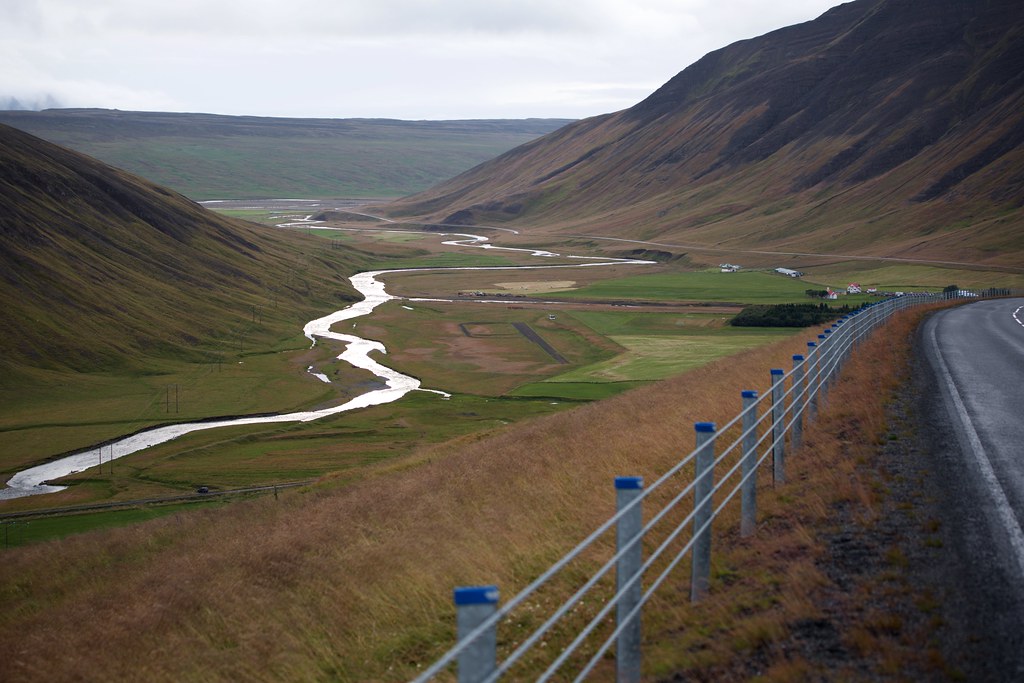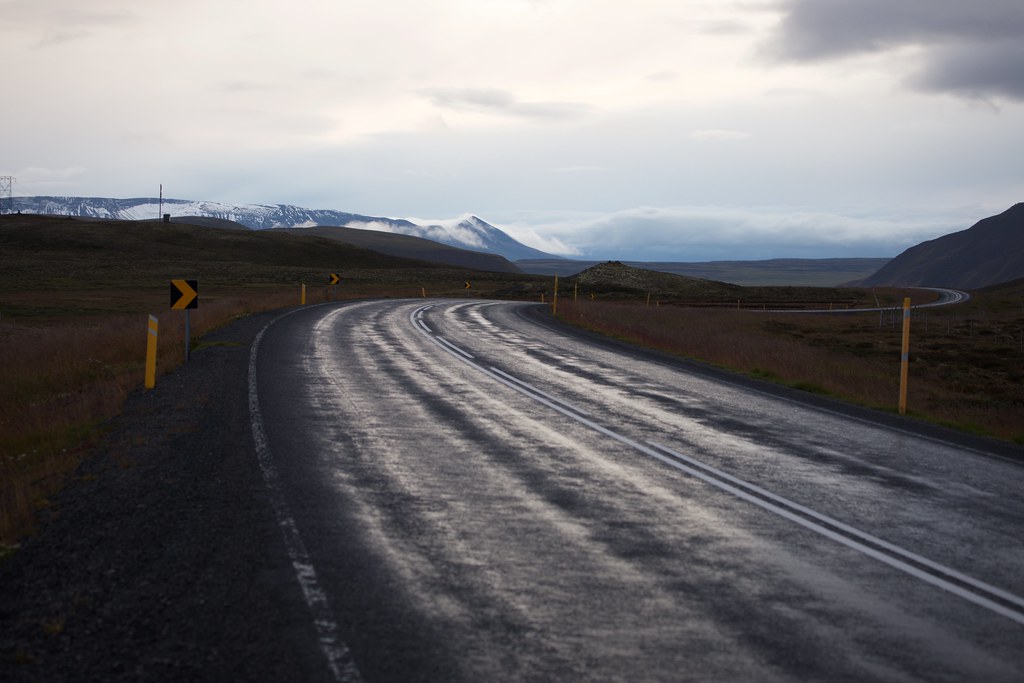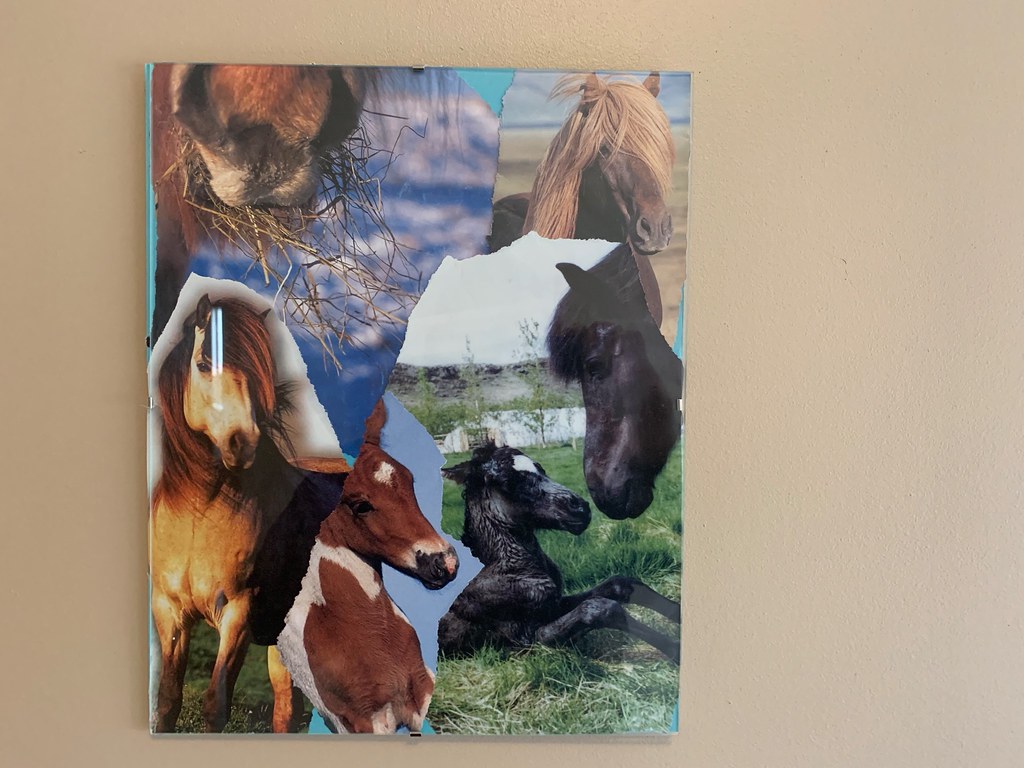As soon as I was awake and folding up the tent, an attendant came by and asked me for the equivalent of about eight dollars. A total bargain.
The adjacent hotel was just finishing up with their buffet breakfast. I was about to resign myself to a day of substandard snacks when a manager pointed out that I could assemble a couple of sandwiches at the buffet and wrap them to go, for about three bucks each. Another total bargain.
The day got an easy start since I was heading inland. The wind pushed me gently along and I listened to some more Dead Ringers. The rocks just offshore looked terribly rugged and romantic in the angled sunlight.
As I came around the edge of a peninsula I could see out into the main bay again. There in the distance I spotted the ferry boat I was on just the other day.
I switched from Dead Ringers to a Terry Pratchett book I hadn’t heard in a long time, called “The Last Hero”. I figured it was at least a little appropriate since one of the main characters is Cohen The Barbarian, and barbarians have some of the same mythic traits as viking raiders. That totally works; yeah?
Over and over I noticed sheep grazing in random spots around the road, or just hunkered down resting. I assumed they must belong to some farmer.
It occurred to me that sheep from different farms might get mixed up if they wandered too far. But I suspect the land stops that from happening. Sheep are good climbers … but not THAT good.
In the early evening I paused for a snack on a massive hillside, and took a photo looking back down the row of peninsulas. Such an odd view.
An hour after that I paused for another shot, this time looking into the adjacent valley. The view was fantastic, and once I saw it I had to just stand there and gape for a while. Of course it could have been the exhaustion talking…
Slowly I neared the top. I was down to about a quarter-mile at a time between rest breaks. One thing I know for sure about bike touring: If you’re doing a long haul you need to pace yourself carefully.
At the top I strolled around for a while, and found this tiny isolated pond, tucked behind a small hill and concealed from the road.
I was tempted to roll my bike over to it and pitch the tent. “How cool would it be,” I thought, “to wake up in the morning next to this? Maybe drink some water right out of it, or wade in and wash my face?”
I thought about the new regulations against stealth camping. How did I know this land didn’t belong to some farmer? If I found this pond, how easily would others find it, while I’m asleep in my tent? My paranoia got the better of me and I decided to continue biking.
I sailed down the other side of the hill, dropping nearly a thousand feet in less than five minutes. The road began following the coast again.
According to my map, I was done with all the big peninsulas now. Pretty soon the road would turn north again and I’d have a couple of short, brutal hills to deal with, then finally a campground.
After such a long and empty stretch of road I was glad to see continued signs of civilization. Then I saw a sign I didn’t like at all:
This caught me by surprise, which was a bit hilarious because I’d been inspecting the cycling map just minutes earlier, and it clearly showed a brown line indicating a gravel road. I felt pretty dumb. Now I was going to be climbing steep hills in the dark on a gravel road. That meant – potentially – sadistic potholes appearing suddenly in front of my wheel as I’m speeding downhill. Get ready to lean on the brakes!
To keep my spirits up I started listening to some old Monty Python records on the iPod. As the landscape grew dark around me and the air grew even colder, Michael Palin introduced me to the Wonderful World Of Sound: “The sound of a common household ant, magnified 300,000 times! ROOOAAARRRRR!”
I stopped and tried to empty my bladder. Just then, five cars decided to go rolling by, one after the other in opposite directions, taking their sweet time on the gravel road. There’s something about a full bladder that generates traffic.
While waiting impatiently I took out a plastic bag filled with mixed nuts – the last of my snacks – and tried to claw it open. It exploded onto the back of my bike, leaving little heaps of nuts, and the rest tumbled into the road. I swept together the ones on my bike and ate them. I was feeling a little nuts anyway just being out here in the dark. In my ears, Graham Chapman said: “And now, a massage from the Swedish Prime Minister.” 20 seconds of slapping noises followed.
The situation was very familiar. If I tried, I could come up with a list of times I’d been biking up a crappy road at night, in some unfamiliar place, with only the promise of a destination somewhere ahead in the dark. The list would go into the double digits. It felt like this particular round had an extra edge of madness. As I cranked up the final hill, John Cleese was just explaining that he wanted to buy a license for his pet bee, Eric, but matters were complicated because Eric had suffered some kind of accident, and was now half-a-bee. Then John busted into song, and I couldn’t help yelling the lyrics out into the frigid air as I danced the bike back and forth across the road.
I was thus in good spirits as I sailed down the other side of the hill, around a couple of hairpin turns, and into the last valley of the night, with gravel crunching under the tires all the way.
It was another half hour before I got to the campground — a big chunk of flattened dirt about 300 meters from the highway, with walls of rock and dirt bulldozed into shape around it to block the wind. I would have taken it for a construction site except there was a row of small buildings to one side including a set of bathrooms. Tucked into the corner between the buildings and the wall of dirt was a small tent, with a bicycle propped nearby. The only other camper in the site, and it was a fellow bicycle tourist!
I didn’t want to set up on dirt. I think the campground owners knew this was unacceptable, which is why they had unrolled mats of fake plastic grass around the bathrooms, making a ribbon just wide enough for a row of tents. I tried to inflate the tent as quietly as possible since the other camper was close by. Every time I use the hand pump – which goes shoopa-shoopa-shoopa – I imagine people around me waking up and wondering “What the heck is that noise? Are we getting a night-time visit from a hyperventilating goat??”
I curled up in my sleeping bag, and the tent walls rattled around me in the breeze that tumbled down the valley. I worried about food, and also worried about being harassed by a campground manager for not paying up front. There wasn’t any other option but to sleep and deal with it in the morning.
{"lat":[65.577305437,65.577305437,65.577305437,65.577305269,65.577305269,65.577305269,65.577305018,65.57730485,65.577304766,65.577304766,65.577304766,65.577304766,65.577304682,65.577304682,65.577304599,65.577304515,65.577304263,65.57730418,65.577303928,65.577303844,65.577303593,65.577303593,65.577303593,65.577303677,65.577303677,65.577303677,65.57730376,65.577303844,65.577303844,65.577303844,65.57730376,65.577303844,65.57730376,65.577303677,65.577303509,65.577303425,65.577303174,65.577303174,65.577303174,65.577303174,65.577303174,65.577303006,65.577303006,65.577302922,65.577302922,65.577302671,65.577302587,65.577302587,65.577302587,65.577302084,65.577301749,65.577300994,65.577300492,65.577300072,65.577299905,65.577299486,65.577299318,65.577298899,65.57729848,65.577297977,65.577297223,65.577296301,65.577295462,65.577294624,65.577293954,65.577293702,65.577293115,65.577292277,65.577291523,65.577290852,65.577290685,65.577290266,65.577290014,65.577289511,65.577288925,65.577288422,65.577287919,65.5772875,65.577286997,65.577286745,65.577286494,65.577286326,65.577286075,65.577285739,65.577285572,65.577285153,65.577284734,65.577284482,65.577284147,65.577283979,65.577283728,65.577283476,65.577283057,65.577282638,65.577282135,65.5772818,65.577281465,65.577281381,65.577281297,65.577281129,65.577280878,65.577280543,65.577280207,65.577279788,65.577279453,65.577279034,65.577278615,65.577278196,65.57727786,65.577277525,65.577277274,65.577277106,65.577276771,65.577276603,65.577276352,65.5772761,65.5772761,65.577276016,65.577275933,65.577275765,65.577275513,65.577275094,65.577274591,65.577274172,65.577273753,65.57727325,65.577272747,65.577272328,65.577271993,65.577271658,65.577271323,65.577271574,65.577271658,65.577271406,65.577271658,65.577271742,65.577271742,65.577271742,65.577271825,65.577271742,65.577271742,65.577271658,65.577271658,65.577271658,65.577271742,65.577271909,65.577272161,65.577272412,65.577272664,65.577272999,65.57727325,65.57727325,65.577273418,65.577273502,65.577273669,65.577273669,65.577274005,65.57727434,65.577274675,65.577274927,65.577275011,65.577275094,65.577275178,65.577275178,65.577275011,65.577274927,65.577274759,65.577274675,65.577274508,65.57727434,65.577274256,65.577273921,65.577273753,65.577273586,65.577273418,65.577273167,65.577272999,65.577272999,65.577272915,65.577272999,65.577273167,65.577273334,65.577273334,65.577273334,65.57727325,65.577273167,65.577272999,65.577272999,65.577272915,65.57727258,65.577272245,65.577272077,65.577271742,65.577271574,65.577271323,65.577271071,65.577270736,65.577270401,65.577270149,65.577269981,65.57726973,65.577269562,65.577269059,65.57726864,65.577268221,65.577267802,65.577267467,65.57726688,65.577267467,65.577267132,65.577265204,65.577266629,65.577271742,65.577274089,65.577275513,65.57727434,65.577273334,65.577272496,65.577272915,65.577272496,65.577272161,65.577271993,65.577271742,65.577271239,65.577270736,65.577270233,65.577269981,65.577269814,65.577269898,65.577269814,65.577269814,65.577269981,65.577270149,65.577270233,65.577270317,65.577270149,65.577270233,65.577270065,65.577269981,65.57726973,65.577269395,65.577268976,65.57726864,65.577268556,65.577268221,65.57726797,65.577267802,65.577267551,65.577267299,65.577266964,65.577266796,65.577266796,65.577262522,65.577252882,65.577241483,65.57722891,65.577216756,65.577207536,65.57720192,65.577197813,65.577194293,65.577191108,65.57718742,65.577182139,65.577174931,65.577163028,65.577146935,65.577129585,65.577113743,65.577097063,65.577082227,65.577066217,65.577045598,65.577025733,65.577010142,65.57699824,65.576989104,65.576984494,65.576982985,65.576983153,65.57698332,65.57698156,65.576976447,65.576970245,65.57696379,65.576956163,65.576947278,65.576933448,65.576917606,65.576899837,65.576880139,65.576859771,65.576840912,65.57682398,65.576682913,65.576684422,65.576687523,65.576690708,65.576692217,65.576694648,65.576695821,65.576696659,65.576697414,65.576698,65.576699258,65.576696324,65.576691798,65.576685679,65.5766778,65.576669837,65.576660449,65.576650559,65.576637232,65.576620719,65.576605129,65.576584258,65.576561375,65.576537235,65.576514856,65.576494488,65.576474455,65.576456518,65.576440676,65.57642475,65.576408238,65.576391558,65.576375297,65.576358366,65.576340596,65.576321401,65.57630053,65.576278235,65.576253424,65.57622677,65.576199612,65.576172539,65.576147225,65.576122164,65.576096012,65.57606919,65.576042368,65.576016384,65.57599325,65.575973217,65.575956286,65.575941953,65.575928206,65.575913873,65.575900378,65.575888476,65.575878166,65.575869198,65.575861151,65.575854194,65.575847656,65.575842376,65.575838017,65.57583282,65.575826199,65.575818655,65.575812033,65.575804741,65.575786804,65.575772806,65.575768196,65.575765095,65.575764424,65.57576543,65.575766184,65.575766436,65.575767777,65.575770124,65.575772135,65.575774482,65.575778925,65.575785714,65.575795437,65.5758091,65.575824606,65.575839777,65.575853188,65.575864169,65.575873305,65.575883363,65.575895182,65.575909179,65.575925189,65.575942372,65.575960812,65.575980174,65.575999285,65.576016635,65.57603122,65.576043625,65.57605712,65.576071788,65.576086205,65.576099952,65.576112441,65.576122331,65.576123253,65.576124259,65.576125684,65.576127779,65.576127528,65.576127612,65.576132222,65.576138089,65.576141107,65.576146052,65.576148399,65.576150243,65.576150243,65.576150327,65.576150411,65.576150327,65.576150411,65.576150411,65.576150411,65.576150494,65.576150578,65.576150578,65.576150494,65.576150578,65.576150578,65.576150578,65.576150578,65.576150578,65.576150578,65.576150578,65.576150494,65.576150494,65.576150494,65.576150494,65.576150578,65.576150578,65.576150662,65.576150662,65.576150662,65.576150662,65.576150662,65.576150662,65.576150662,65.576150662,65.576150662,65.576150662,65.576150578,65.576150578,65.576150578,65.576150578,65.576150578,65.576150578,65.576150578,65.576150578,65.576150578,65.576150494,65.576150494,65.576150494,65.576150494,65.576150494,65.576150494,65.576150494,65.576150494,65.576150578,65.576150578,65.576150662,65.576150662,65.576150746,65.57615083,65.57615083,65.57615083,65.57615083,65.576150914,65.576150914,65.576150914,65.576150914,65.576150914,65.576150914,65.576150997,65.576150494,65.576149656,65.576149908,65.576151919,65.576158206,65.57616642,65.576173126,65.576179077,65.576183184,65.576185866,65.576186872,65.576187375,65.576187794,65.576188381,65.576189722,65.576190392,65.57619056,65.576190644,65.576192152,65.576194499,65.576196595,65.576198774,65.576201121,65.576203049,65.57620439,65.576206066,65.576207659,65.576209335,65.576211012,65.576212772,65.576213945,65.576214532,65.57621537,65.57621537,65.576215538,65.576189973,65.576192739,65.576193745,65.576194667,65.576195924,65.576197517,65.576198774,65.576199948,65.576200199,65.57619802,65.576197601,65.57619626,65.576194919,65.576193661,65.576193158,65.576192069,65.57619123,65.576190644,65.576189722,65.5761888,65.576188213,65.576188213,65.576187459,65.576186788,65.576186201,65.576185698,65.576185866,65.576186201,65.576187207,65.576188129,65.576188716,65.576189303,65.576190057,65.576191398,65.576192739,65.576194248,65.576195589,65.576197349,65.576199193,65.57620087,65.576202462,65.576203217,65.576203468,65.57620439,65.576204809,65.576204893,65.576204893,65.576204893,65.576204809,65.576204642,65.576204474,65.576204306,65.576204222,65.576203971,65.576203887,65.576203803,65.576203803,65.576203636,65.576203552,65.576203552,65.576203468,65.5762033,65.576203217,65.576203049,65.576203049,65.576202881,65.576202798,65.576202881,65.576202798,65.576202714,65.57620263,65.576202378,65.576202211,65.576202043,65.576201875,65.576201959,65.576202043,65.576201959,65.576201792,65.576201792,65.576201708,65.576201792,65.576201875,65.576201875,65.576201792,65.576201792,65.576201792,65.576201792,65.576201875,65.576201875,65.576201875,65.576201875,65.576201875,65.576201875,65.576201959,65.576201959,65.576201959,65.576202043,65.576202043,65.576201959,65.576202211,65.576202295,65.576202211,65.576202378,65.576202378,65.576202462,65.576202462,65.576202546,65.57620263,65.576202798,65.576202881,65.576202881,65.576202881,65.576202965,65.576203049,65.576203217,65.576203217,65.5762033,65.576203217,65.576203133,65.576202881,65.57620263,65.576202295,65.576201959,65.576201792,65.576201624,65.57620154,65.576201456,65.576201289,65.576201205,65.576201205,65.576201121,65.576201037,65.576201037,65.576201037,65.576201037,65.576201037,65.576200953,65.57620087,65.57620087,65.57620087,65.57620087,65.576200953,65.576201037,65.576200786,65.576200702,65.576200618,65.576200451,65.576200283,65.576200031,65.57619978,65.576199529,65.576199277,65.576199109,65.576198858,65.576198607,65.576198355,65.576198187,65.57619802,65.576197852,65.576197517,65.576197433,65.576197182,65.57619693,65.576196679,65.576196511,65.576196427,65.576196343,65.576196176,65.576196008,65.576195841,65.576195589,65.576195421,65.576195338,65.576195086,65.576195002,65.576194835,65.576194583,65.576194416,65.576194164,65.57619408,65.576193745,65.576193494,65.576193326,65.576193242,65.576193158,65.576193074,65.576192991,65.576193074,65.576192823,65.576192572,65.576192404,65.576192152,65.576191985,65.576191733,65.57619165,65.576191314,65.576190895,65.576190392,65.576190141,65.576189889,65.576189554,65.576189135,65.576188632,65.576188297,65.576187962,65.576187542,65.57618704,65.576186788,65.576186453,65.576186201,65.576186118,65.576186118,65.576186118,65.576186285,65.576186285,65.576186369,65.576186453,65.576186537,65.576186704,65.576186788,65.57618704,65.576187123,65.576187291,65.576187291,65.576185112,65.57618134,65.576180334,65.576182094,65.576184441,65.576185196,65.57618662,65.576185531,65.576178071,65.576168348,65.576156194,65.57614337,65.576127947,65.576109088,65.576088552,65.57606634,65.576041446,65.57601454,65.575987299,65.575961902,65.575936002,65.575908509,65.575880849,65.575854529,65.57583039,65.575807255,65.575786636,65.575770794,65.575760317,65.575751683,65.575745397,65.575739446,65.575734501,65.57573031,65.575720922,65.575720922,65.575715977,65.57571145,65.575710947,65.575710696,65.575709355,65.575706756,65.575702817,65.575700051,65.575697872,65.575695776,65.575692843,65.575688652,65.575686137,65.575685047,65.575684796,65.575684293,65.575684293,65.57568555,65.575685969,65.575685886,65.575686221,65.5756884,65.575690663,65.575692256,65.575693765,65.575695944,65.575699129,65.57570156,65.57570441,65.575708265,65.575712875,65.575717066,65.575721676,65.575727963,65.575732657,65.575736428,65.575741793,65.575747073,65.575752857,65.575761071,65.575769705,65.575779176,65.575790156,65.575801053,65.575811949,65.57582075,65.575828629,65.575836844,65.575846399,65.575856793,65.575867354,65.575878166,65.575889063,65.575899373,65.575909682,65.575921333,65.575935918,65.575949329,65.575961063,65.575972463,65.575983275,65.575993837,65.576005571,65.576017138,65.576029124,65.576041949,65.576054103,65.576066172,65.57607732,65.576089055,65.576100538,65.576111519,65.576121409,65.576131468,65.576141861,65.576153763,65.576165247,65.576176897,65.576187291,65.576199026,65.576209754,65.576220567,65.576231212,65.576241187,65.576253005,65.576264404,65.576274798,65.576282258,65.576292735,65.576302458,65.576313942,65.576323832,65.576333555,65.576343949,65.576354342,65.576364987,65.576375465,65.576385774,65.576397174,65.576408406,65.576419973,65.576431204,65.576441263,65.576450818,65.576460122,65.576471605,65.57648225,65.576494236,65.576504797,65.576515778,65.57652701,65.576538828,65.576549976,65.576561292,65.576572523,65.576585599,65.576598507,65.576610996,65.576623653,65.576635723,65.57664905,65.576662629,65.576677297,65.576690205,65.576703281,65.576715016,65.576726666,65.576737395,65.576749549,65.576762457,65.57677612,65.576790201,65.576804953,65.576819035,65.57683362,65.576847366,65.576861531,65.576876116,65.576891538,65.576905872,65.576919366,65.576933197,65.576948116,65.576962868,65.57697695,65.576990445,65.577004107,65.577017602,65.577031516,65.577044927,65.577058841,65.577072504,65.577086753,65.577101086,65.577115838,65.577130171,65.577144337,65.577157748,65.577172919,65.57718809,65.577203848,65.5772186,65.577235783,65.577252379,65.577270568,65.577288003,65.57730376,65.577319602,65.577333097,65.577347011,65.577362099,65.577376264,65.5773911,65.577407277,65.577423286,65.577438793,65.577452875,65.577468968,65.577485313,65.577503585,65.577520768,65.577537867,65.577554128,65.577570305,65.577587069,65.577605006,65.57762177,65.577637696,65.577652867,65.577667954,65.577682958,65.577698464,65.577714306,65.577731573,65.577748923,65.577766022,65.57778396,65.577803322,65.577821762,65.577841124,65.577859732,65.577877669,65.577895104,65.57791346,65.577933409,65.577953609,65.577974564,65.577995184,65.578015636,65.578035333,65.578054863,65.578074644,65.578094174,65.578112866,65.578131725,65.578151087,65.578172629,65.578196266,65.57822116,65.578246557,65.578272457,65.578299195,65.578325179,65.578350493,65.578376141,65.578400113,65.578422074,65.578443532,65.578465911,65.578489297,65.578513101,65.578537158,65.578560459,65.578583258,65.578605722,65.578627766,65.578650313,65.578673615,65.578697503,65.578720889,65.578743771,65.578766906,65.578789201,65.578812168,65.578834631,65.578857933,65.578880816,65.578902189,65.578924318,65.578946362,65.57896782,65.578989361,65.579010651,65.579032025,65.579053399,65.57907536,65.579096398,65.579116682,65.57913705,65.57915767,65.579177954,65.579198071,65.579218606,65.579238304,65.579257414,65.579276358,65.579296223,65.579315753,65.579335701,65.579355902,65.579376018,65.579396638,65.579416671,65.579436117,65.579456317,65.57947526,65.579495041,65.579515409,65.579535861,65.579555391,65.57957467,65.579592942,65.579610628,65.579628565,65.579646586,65.579665781,65.579684975,65.579703918,65.579722862,65.579743146,65.579762843,65.579781451,65.579799807,65.579817158,65.579834257,65.579852949,65.579871808,65.579891841,65.579912125,65.57992914,65.579947664,65.579966775,65.579987227,65.580007846,65.580028047,65.580046906,65.580066017,65.580085295,65.580104322,65.580123181,65.580141705,65.580161151,65.580181771,65.580202558,65.580222758,65.580242875,65.580263494,65.580282773,65.580301632,65.580320072,65.580339099,65.580357791,65.580376482,65.580395928,65.580415626,65.580435072,65.580454769,65.580474551,65.580493661,65.580512856,65.580532218,65.580551329,65.580570859,65.580590305,65.580609332,65.580627437,65.580645458,65.580662221,65.580679153,65.580698096,65.580717877,65.580738245,65.580757859,65.580778395,65.580799098,65.580817957,65.580835475,65.580854335,65.580872775,65.580890544,65.580908817,65.580928682,65.580948966,65.580969167,65.580990373,65.581012669,65.581034294,65.581054914,65.581075282,65.58109565,65.581116353,65.581137308,65.581158765,65.581182235,65.581205788,65.581230179,65.581253062,65.581275106,65.58129648,65.581317519,65.581337887,65.581356997,65.581377114,65.581398488,65.581420197,65.581442912,65.581467471,65.58149203,65.581516421,65.581540393,65.581563611,65.581586494,65.581609293,65.581631421,65.581653633,65.58167618,65.581698057,65.581719599,65.581741224,65.581763939,65.581786654,65.581809369,65.581832587,65.581855218,65.581876843,65.581899223,65.581921519,65.581943814,65.581966278,65.581988071,65.582010786,65.582032998,65.582055461,65.582077673,65.582100221,65.582122684,65.582145483,65.582168869,65.582192422,65.582216562,65.582240366,65.582265093,65.582290574,65.582316893,65.582343044,65.582369196,65.582394174,65.58241999,65.582444633,65.58246827,65.582490734,65.582510683,65.582531386,65.582551754,65.582571954,65.582591568,65.582610595,65.582630544,65.582651666,65.582673878,65.582697012,65.582720901,65.582744789,65.58276918,65.582793572,65.582817795,65.582842606,65.582867416,65.582891975,65.582916283,65.582940674,65.582964814,65.582989289,65.583013764,65.583037066,65.583061038,65.58308543,65.583109905,65.583132787,65.583156341,65.5831809,65.583205123,65.583229347,65.583252146,65.583273771,65.583294726,65.583314842,65.583335881,65.58335692,65.58337779,65.58339841,65.583418107,65.583437553,65.583457586,65.58347787,65.58349849,65.583520283,65.583542327,65.58356345,65.583584488,65.583605527,65.583625727,65.583644754,65.583663781,65.583682556,65.5837015,65.583720443,65.583739302,65.583758916,65.583778948,65.583798813,65.583819014,65.583838795,65.583858325,65.583878861,65.583900151,65.583921525,65.583942395,65.583963937,65.583984389,65.584004002,65.584023784,65.584042811,65.584062173,65.584082122,65.584102657,65.584122858,65.584143477,65.584164097,65.584185554,65.584207599,65.584229308,65.584250011,65.584270631,65.584291166,65.584311115,65.5843314,65.584352103,65.584373644,65.584395102,65.58441656,65.58443785,65.584459224,65.584480514,65.584500546,65.584521166,65.584542791,65.584564668,65.584585874,65.584607751,65.584628454,65.584649241,65.584670615,65.584691905,65.584713614,65.58473524,65.584756949,65.584779161,65.584801373,65.584823082,65.584844204,65.584865159,65.584886365,65.584906817,65.584928191,65.5849499,65.584972196,65.58499466,65.585017877,65.585040089,65.585062218,65.585083759,65.585104882,65.585125585,65.585145366,65.585164225,65.585182833,65.585200435,65.585217618,65.585232957,65.585247877,65.585263635,65.585278471,65.585293139,65.585308981,65.585328008,65.585349466,65.585373354,65.58539741,65.585423813,65.585450384,65.5854762,65.585500759,65.585525066,65.585548787,65.585571251,65.585593127,65.58561492,65.585636546,65.585658087,65.585678958,65.585698656,65.585718018,65.585737129,65.585756994,65.585777529,65.585798484,65.585819606,65.585840561,65.585860426,65.585879286,65.585897391,65.585913903,65.585929326,65.58594391,65.585958662,65.585974336,65.585992106,65.586011133,65.586028986,65.586048349,65.586069052,65.586090342,65.586110961,65.586132587,65.586155386,65.586177346,65.586199223,65.58622001,65.586241384,65.586262506,65.586280108,65.586296201,65.586311624,65.58632646,65.58633962,65.586353282,65.586369124,65.586385469,65.586403657,65.586420673,65.586438359,65.586455961,65.586473982,65.586490075,65.586504576,65.586518741,65.586534834,65.586550844,65.586566602,65.586582779,65.58659971,65.586617145,65.586634327,65.586650002,65.586665592,65.586678919,65.58669233,65.586707501,65.586723343,65.586738347,65.586754021,65.58677112,65.58678604,65.586800624,65.586813868,65.586828452,65.586842869,65.58685737,65.586870865,65.586882264,65.58689534,65.586909254,65.586923252,65.586937501,65.586953007,65.586967005,65.586982931,65.586996929,65.587009837,65.587024337,65.587038754,65.587054596,65.58707027,65.587084687,65.587099858,65.587113605,65.58712953,65.587143863,65.587159957,65.587172278,65.587186779,65.587202621,65.587217373,65.587232963,65.587246542,65.58725836,65.587270682,65.587283757,65.587297839,65.587312591,65.587327343,65.587342263,65.587357183,65.587371767,65.587385597,65.587399931,65.587414766,65.587429183,65.587444522,65.587460951,65.587477128,65.58749364,65.587509901,65.587525324,65.587541752,65.587558181,65.587573268,65.587587098,65.58760118,65.587614926,65.587629846,65.587645017,65.587662703,65.587681227,65.587697823,65.587713917,65.587728417,65.58774208,65.587755407,65.587768399,65.587780469,65.587793126,65.587807794,65.587823049,65.587838639,65.587853224,65.587869317,65.587885997,65.587903012,65.58791986,65.587935702,65.587947436,65.587957411,65.587970151,65.587983311,65.587996638,65.588011307,65.588025807,65.588041649,65.58805791,65.588073668,65.588088671,65.588104178,65.588120104,65.588135359,65.58814944,65.588164612,65.588180118,65.588194786,65.588209455,65.588225464,65.588240635,65.588255304,65.58826905,65.588283299,65.588297632,65.588311965,65.588326215,65.588342978,65.588359491,65.588375835,65.588391761,65.588407771,65.588422942,65.588438364,65.5884532,65.588467366,65.588480525,65.588494439,65.588510114,65.588526123,65.588540624,65.588554454,65.588568116,65.588581863,65.588595441,65.58860902,65.588622515,65.588636513,65.588651432,65.588663335,65.588673393,65.588681859,65.588689235,65.58869594,65.588702562,65.588709351,65.588715554,65.588722176,65.58873148,65.588741119,65.588751429,65.588761571,65.588771461,65.588779927,65.588788979,65.588798367,65.588807755,65.588817646,65.588827033,65.588836421,65.588845054,65.588854945,65.588865925,65.588876822,65.58888621,65.588895011,65.588903225,65.588911691,65.588920743,65.58892946,65.58893868,65.588946895,65.588958294,65.588970448,65.58898059,65.588989894,65.58899794,65.589004646,65.589010429,65.589018727,65.589028283,65.589038257,65.589047896,65.589056865,65.589066672,65.589076227,65.589084525,65.589093913,65.589104307,65.589114365,65.589122663,65.589129788,65.589136996,65.58914521,65.589153173,65.589161974,65.589170524,65.589179325,65.589188042,65.589198435,65.589207236,65.589215283,65.589224503,65.589233388,65.589242357,65.589251325,65.589258282,65.589265575,65.589273202,65.58928083,65.589288206,65.589298264,65.58930916,65.589318464,65.589326511,65.589333803,65.589342353,65.58935174,65.589361212,65.589368672,65.589376299,65.589381832,65.589388118,65.589394907,65.589402702,65.589409492,65.589417958,65.589427178,65.589436984,65.58944478,65.589452072,65.589460035,65.589468919,65.589476379,65.589483001,65.589489623,65.589496244,65.589502782,65.589509153,65.589516445,65.58952315,65.589530275,65.589538405,65.589545865,65.58955299,65.589560701,65.589567239,65.589574029,65.589580483,65.589586182,65.589592385,65.589599258,65.589605293,65.589611999,65.589617866,65.589624404,65.589631109,65.589638904,65.589646616,65.589654746,65.589662877,65.589670588,65.589677377,65.589684167,65.589691543,65.589700176,65.589707133,65.589715012,65.589722891,65.589730267,65.589738146,65.589745774,65.589753234,65.58976128,65.589769997,65.589778631,65.589785839,65.589793467,65.589801932,65.589811656,65.589820792,65.589827749,65.58983479,65.589841495,65.589847446,65.589853314,65.589859768,65.589864797,65.589872676,65.589882566,65.589891116,65.589896648,65.589900504,65.589905365,65.589911568,65.589918525,65.589925063,65.589931349,65.589938138,65.589944425,65.589950879,65.589959261,65.589968481,65.58997636,65.589982227,65.589986502,65.589991364,65.589996896,65.590002847,65.590009301,65.590015587,65.590020868,65.590024053,65.590027825,65.59003168,65.590036123,65.590041906,65.590046684,65.590052132,65.59005691,65.590061855,65.590065124,65.590067639,65.59007007,65.590071327,65.590072081,65.590072752,65.590074009,65.590075769,65.590078619,65.590081637,65.590084067,65.59008675,65.590087672,65.590087755,65.590086079,65.590083816,65.590083397,65.590082056,65.59008105,65.590080798,65.590080715,65.590081385,65.590081804,65.59008105,65.590080128,65.590078703,65.590076188,65.590074093,65.590071327,65.59006789,65.59006504,65.590061604,65.590057329,65.590052216,65.590046349,65.590038637,65.590030675,65.590022963,65.590014414,65.590005864,65.589996644,65.589986753,65.58997745,65.589967307,65.589955908,65.589944257,65.589931517,65.58991777,65.589903354,65.589888518,65.589873346,65.589858427,65.58984292,65.589825905,65.589807297,65.589786426,65.589764549,65.589743678,65.589723813,65.5897042,65.589684251,65.589664218,65.589643263,65.589621051,65.589597582,65.589572687,65.589547793,65.589523234,65.589498508,65.589474368,65.589450982,65.589427429,65.589402367,65.589376802,65.589351824,65.589327265,65.589303125,65.589277477,65.589250906,65.589223497,65.589194328,65.589164908,65.589135236,65.589105815,65.589076982,65.589048651,65.589020571,65.588992827,65.588964832,65.588937507,65.588910517,65.588883444,65.588854945,65.588825273,65.588795434,65.588766181,65.58873894,65.588712704,65.588685379,65.588657048,65.588628047,65.588597956,65.588567865,65.588537439,65.588505671,65.588473149,65.588440376,65.588407938,65.588375835,65.588343565,65.58831096,65.588277683,65.588244323,65.588210125,65.588176095,65.588142399,65.588109375,65.588076182,65.588042487,65.588008624,65.587974678,65.587940815,65.587906533,65.587872837,65.587839058,65.587805447,65.587771584,65.587736799,65.587702685,65.587667397,65.587631522,65.58759481,65.587558851,65.587521887,65.587485258,65.587448126,65.587412252,65.587375958,65.587339497,65.587302533,65.587265569,65.587228018,65.587190886,65.587153251,65.587114862,65.587076892,65.587038587,65.587000449,65.586962479,65.586924509,65.586885449,65.586845887,65.586806408,65.586766007,65.586725271,65.586683529,65.586641955,65.586600632,65.586559812,65.586519663,65.586479178,65.586439532,65.586400808,65.586362335,65.586324784,65.586287065,65.586249933,65.586213891,65.586176927,65.586138789,65.586100568,65.586060251,65.586018593,65.585975845,65.58593293,65.585889763,65.585847937,65.585805776,65.585763364,65.585721287,65.585678958,65.585636881,65.585594552,65.585551721,65.585508722,65.585465555,65.585422556,65.585379976,65.585337312,65.585295067,65.585253157,65.585209991,65.585166991,65.585124411,65.585081664,65.585037826,65.584993151,65.584947637,65.584901034,65.58485376,65.584805815,65.584758038,65.584710681,65.584663323,65.584616468,65.584569697,65.584523597,65.584477161,65.584431228,65.584385295,65.584340284,65.584296112,65.584251939,65.584207599,65.5841646,65.584120846,65.584077931,65.584034932,65.58399143,65.583947257,65.583903,65.583858996,65.583815326,65.583771237,65.583726226,65.583681132,65.583636372,65.583592283,65.583547608,65.583503435,65.583458927,65.583415006,65.583370414,65.583326661,65.583283159,65.583239992,65.583197999,65.583155754,65.583113425,65.583071516,65.583029774,65.582987948,65.582946206,65.582903794,65.582862052,65.582819975,65.582777898,65.582736994,65.58269609,65.58265636,65.582617636,65.58257866,65.582538678,65.582498864,65.582458882,65.582419152,65.582380344,65.582341117,65.582301303,65.582260818,65.582219914,65.582178843,65.58213752,65.582096952,65.582056886,65.582016737,65.581976001,65.581936019,65.581896792,65.58185857,65.581820349,65.581782295,65.581744493,65.581706355,65.581668134,65.581630415,65.581593367,65.581558498,65.581525055,65.581493371,65.581462777,65.581432686,65.581403936,65.581376024,65.581347693,65.581319363,65.581291367,65.581263288,65.58123613,65.581209392,65.581184414,65.581159436,65.581136721,65.581114593,65.581093554,65.581073102,65.581053153,65.581032282,65.581013926,65.58099557,65.580975872,65.580956259,65.580936645,65.580917115,65.580899932,65.580882414,65.580863471,65.580845366,65.580826507,65.580807396,65.580789207,65.580770767,65.58075174,65.580733216,65.580714692,65.580697342,65.580680997,65.580663143,65.58064705,65.580630035,65.580613858,65.580598184,65.580583599,65.580567338,65.580550491,65.58053599,65.5805204,65.580504223,65.5804888,65.580473126,65.58045611,65.58043943,65.580422248,65.5804054,65.580389893,65.580374722,65.580360305,65.580346056,65.580331723,65.58031739,65.580303225,65.580290484,65.580279252,65.580268859,65.580259303,65.580251257,65.580243378,65.580234577,65.580224351,65.580213454,65.580201887,65.580189398,65.580176155,65.580162409,65.58014992,65.580137347,65.580125361,65.580113458,65.580102394,65.580093006,65.580083702,65.580074734,65.5800661,65.580057216,65.580049253,65.580042128,65.580037099,65.580033495,65.58003098,65.580029974,65.580030645,65.580032573,65.580032657,65.580031819,65.580031316,65.580031232,65.580031148,65.580030813,65.580030477,65.58003031,65.580030477,65.580030226,65.580029974,65.580029974,65.580030142,65.58003031,65.580030729,65.580030897,65.580031232,65.580031399,65.580031902,65.580032321,65.580032573,65.580032824,65.580032908,65.580032908,65.580032992,65.580033076,65.580032992,65.580032824,65.580032908,65.580033076,65.580033243,65.580033495,65.580033746,65.580034165,65.580034668,65.580035507,65.580036261,65.580037015,65.58003777,65.58003844,65.580039111,65.580039698,65.5800402,65.580040871,65.580041374,65.580041877,65.580042296,65.580042631,65.580042631,65.580042547,65.58004238,65.580042296,65.580042212,65.580042128,65.580042128,65.580041961,65.580042128,65.580042296,65.580042547,65.580042799,65.580042883,65.580042966,65.580042966,65.580043134,65.580043218,65.580043218,65.580043302,65.580043888,65.580043637,65.580043469,65.580043218,65.580042883,65.580042464,65.580041961,65.580041458,65.580040787,65.5800402,65.580039614,65.580039195,65.580038859,65.580038608,65.580037853,65.580037434,65.580037015,65.580036429,65.580036009,65.58003559,65.580035507,65.580035507,65.580035423,65.580035423,65.58003559,65.580035926,65.580035926,65.580036093,65.58003668,65.580037015,65.580037434,65.58003777,65.580038021,65.580038356,65.580038356,65.580038692,65.580039111,65.580039362,65.580040033,65.580040787,65.580041458,65.580042296,65.580042966,65.580044056,65.580044894,65.580045649,65.580046152,65.580046487,65.58004699,65.580047409,65.58004766,65.580047912,65.580048247,65.580048163,65.580048163,65.580047996,65.580047996,65.580048079,65.580047996,65.580047912,65.580047912,65.580047744,65.580047828,65.580047744,65.580047912,65.580048079,65.580048415,65.580048499,65.580048834,65.580048918,65.580048918,65.58004875,65.580048666,65.580048331,65.580047996,65.580047576,65.580047744,65.580047409,65.580047409,65.580047325,65.58004699,65.580047074,65.580046822,65.580046487,65.580046487,65.580046822,65.580047241,65.580047409,65.580047241,65.580047074,65.58004699,65.580046654,65.580046068,65.580045313,65.580044475,65.580043972,65.580043218,65.580042715,65.580041961,65.580041122,65.580040284,65.580039614,65.580038775,65.58003777,65.580036931,65.580036093,65.580035255,65.580034333,65.580033327,65.580032405,65.580031399,65.580030394,65.580029304,65.58002813,65.580027041,65.580025951,65.580025029,65.580024107,65.580023353,65.580023353,65.580023688,65.580023688,65.580023437,65.580023604,65.580023604,65.580023437,65.580023437,65.580023856,65.58002461,65.580024778,65.580024945,65.580025029,65.580025784,65.580026286,65.580026538,65.580026957,65.58002746,65.580027963,65.58002855,65.580028969,65.580029472,65.580029891,65.580030394,65.580030729,65.580031232,65.580031735,65.580032238,65.580032908,65.580033411,65.580033746,65.580033914,65.580034082,65.580034249,65.580034501,65.580034501,65.580034752,65.580035087,65.580035171,65.580035339,65.580035758,65.580036093,65.580036429,65.580036848,65.580036429,65.580036596,65.58003668,65.580036764,65.580036848,65.580037015,65.580037015,65.580037267,65.580037434,65.580037602,65.580037853,65.580038021,65.580038189,65.58003844,65.580038775,65.580039027,65.580039027,65.580038943,65.580038943,65.580038943,65.580039111,65.580039111,65.580039278,65.58003953,65.580039698,65.580039781,65.580039949,65.580040033,65.580040284,65.580040368,65.58004062,65.58004129,65.580041709,65.580042212,65.580042631,65.580042799,65.580042715,65.580042883,65.580043134,65.580043302,65.580043386,65.580043637,65.580043637,65.580043721,65.580043637,65.580043721,65.580043805,65.580043805,65.580043888,65.580043805,65.580043805,65.580043805,65.580043721,65.580043972,65.580043972,65.580043972,65.580043888,65.580043721,65.580043469,65.580043386,65.580043218,65.58004305,65.580043134,65.58004305,65.580043134,65.580043218,65.580043386,65.580043805,65.580044475,65.580044978,65.580045481,65.580045984,65.580046487,65.58004699,65.580047576,65.580047996,65.580048331,65.580048582,65.580048918,65.580049337,65.580049756,65.580050091,65.580050426,65.580050762,65.580050929,65.580051265,65.580051767,65.58005227,65.580052606,65.580052857,65.580053192,65.580053611,65.580054198,65.580054533,65.580054953,65.580055288,65.580055623,65.580055791,65.580056377,65.580056797,65.580057216,65.580057467,65.580057886,65.580058054,65.58005797,65.580057802,65.580056713,65.580055539,65.580054114,65.580052522,65.580052941,65.580052522,65.580051767,65.58005051,65.580050678,65.580050091,65.580049756,65.58004875,65.580047325,65.580045481,65.580043553,65.580042044,65.580041122,65.580040117,65.580039111,65.580038105,65.580037183,65.580036345,65.58003559,65.580034836,65.580034249,65.580033579,65.580033076,65.580032908,65.580032489,65.580032405,65.580032405,65.580032238,65.580032154,65.580032321,65.580032573,65.580032573,65.580032741,65.580032908,65.580033076,65.58003316,65.58003316,65.580033076,65.580033076,65.58003316,65.580032992,65.580033076,65.580033076,65.580032908,65.580032824,65.580032657,65.580032657,65.580032824,65.580032908,65.580032908,65.580032908,65.580032657,65.580032657,65.580032657,65.580032657,65.580032657,65.580032489,65.580032405,65.580032321,65.58003207,65.580031986,65.580031819,65.580031651,65.580031651,65.580031567,65.580031316,65.580031064,65.580030729,65.580030477,65.580030142,65.580029891,65.580029639,65.580029388,65.58002922,65.580029136,65.580029136,65.580029052,65.58002922,65.580029304,65.580029052,65.580028801,65.580028633,65.580028466,65.580028466,65.580028382,65.58002855,65.580028717,65.580028969,65.58002922,65.580029388,65.580029555,65.580029639,65.580029807,65.580029639,65.580029639,65.580029723,65.580029723,65.580029723,65.580029807,65.580029639,65.580029555,65.580029807,65.580029974,65.580030142,65.58003031,65.580030394,65.580030394,65.580030561,65.580030729,65.580030897,65.580031232,65.580031735,65.58003207,65.580032489,65.580032824,65.580032992,65.580032992,65.580032992,65.580032824,65.580032824,65.580032741,65.580032657,65.580032489,65.580032154,65.58003207,65.580031986,65.580031819,65.580031819,65.580031902,65.580031819,65.580031735,65.580031735,65.580031819,65.580031902,65.580031819,65.580031735,65.580031651,65.580031567,65.580031399,65.580031399,65.580031567,65.580031567,65.580031651,65.580031819,65.580031986,65.58003207,65.580032405,65.580032573,65.580033076,65.580033411,65.58003383,65.580034249,65.580034585,65.580034752,65.580035004,65.580035255,65.580035255,65.580035255,65.580035339,65.580035423,65.580035339,65.580035423,65.580035507,65.580035507,65.580035507,65.580035339,65.58003492,65.580034501,65.580034249,65.580033998,65.58003383,65.580033495,65.580033411,65.580033076,65.580032824,65.580032489,65.580032154,65.580031819,65.580031232,65.580030645,65.580030058,65.580029388,65.580028885,65.580028466,65.58002813,65.580027544,65.580027125,65.580026957,65.580026789,65.580026873,65.580027041,65.580027208,65.580027376,65.58002746,65.580027711,65.580027879,65.580027879,65.580028047,65.580028298,65.580028466,65.580028717,65.580028801,65.580028969,65.580029052,65.580029304,65.580029555,65.580029974,65.58003031,65.580030394,65.580030477,65.580030477,65.580030561,65.580030561,65.580030645,65.580030561,65.580030561,65.580030561,65.580030645,65.580030645,65.580030729,65.580030729,65.580030645,65.580030897,65.580031148,65.580031316,65.580031399,65.580031735,65.580031819,65.580031902,65.580031819,65.580031651,65.580031399,65.580031232,65.58003098,65.580030729,65.580030561,65.580030394,65.580030477,65.58003031,65.580025029,65.580017653,65.580008852,65.579998626,65.579985299,65.579970044,65.579954956,65.579940204,65.57992562,65.579909946,65.579894188,65.579878849,65.579863845,65.579848674,65.579833084,65.579817577,65.579801651,65.579786564,65.579770387,65.579753875,65.579737865,65.57972152,65.579704757,65.579688077,65.579671061,65.579655136,65.579639043,65.579623368,65.579606772,65.579589757,65.579573328,65.579556062,65.579537705,65.579518846,65.579499735,65.579479703,65.579459754,65.579438631,65.579415916,65.579391776,65.579367217,65.579341988,65.579315333,65.579287841,65.579259175,65.579229,65.579196646,65.579163202,65.57912959,65.579095057,65.579059685,65.57902423,65.578988523,65.578950553,65.578911074,65.578870673,65.578829686,65.578787106,65.578743604,65.578697755,65.578653917,65.578609577,65.57856398,65.57851855,65.578474293,65.578429199,65.57838226,65.578334986,65.57828788,65.578240522,65.578192242,65.578143627,65.57809585,65.578047738,65.577999207,65.577951263,65.577904743,65.577857888,65.577811369,65.57776443,65.577719754,65.577676252,65.577632918,65.577590589,65.577550105,65.577510291,65.577469638,65.577429489,65.577388669,65.577348771,65.577309795,65.577271574,65.577233436,65.577196472,65.577160262,65.577125142,65.57709019,65.577055824,65.577022045,65.57698793,65.576953984,65.576919953,65.576885587,65.576851305,65.57681761,65.57678358,65.576749465,65.576715099,65.576680734,65.576647038,65.576613008,65.576579648,65.576545114,65.576511,65.576477389,65.576444448,65.576412429,65.576380661,65.576349397,65.576317713,65.576285527,65.576253257,65.576221405,65.576190811,65.576160972,65.576130965,65.576100035,65.576069358,65.576038428,65.576007751,65.575976151,65.575944551,65.575913287,65.575883447,65.575853691,65.575824187,65.575794012,65.575763586,65.575732321,65.575701727,65.575671385,65.575641294,65.575611622,65.57558262,65.575552949,65.57552445,65.575495449,65.575466615,65.575438116,65.57540945,65.575379778,65.575349436,65.575319596,65.575289924,65.575261258,65.575232173,65.575202753,65.575173165,65.57514366,65.575112815,65.575081969,65.575051459,65.575021284,65.57499111,65.574961521,65.574932185,65.574902513,65.574873009,65.574843337,65.574813413,65.574783825,65.574754908,65.574724817,65.574695228,65.574664467,65.574633789,65.574602608,65.574570757,65.574538403,65.574504708,65.574470258,65.574435389,65.574398928,65.574362467,65.574325167,65.574286611,65.574247132,65.574207485,65.574167085,65.574126349,65.574084774,65.574043703,65.574000704,65.573957286,65.573913784,65.573870365,65.573828456,65.57378596,65.573743966,65.573702057,65.573659812,65.573617399,65.573574819,65.573532323,65.573490497,65.573448923,65.573405924,65.573360997,65.573314645,65.573266784,65.573218589,65.573168465,65.573116581,65.573064362,65.573012226,65.572958247,65.572850288,65.572850288,65.572795973,65.572740904,65.572685751,65.572629592,65.57257402,65.572518951,65.572463882,65.572410405,65.572356677,65.572303452,65.572251736,65.572201277,65.572151321,65.572101616,65.572051995,65.572002458,65.571953256,65.57190439,65.571854937,65.571805986,65.571756785,65.571708337,65.571660812,65.571612784,65.571564755,65.571515973,65.571466855,65.57141824,65.571369624,65.571321093,65.57127273,65.57122512,65.571177595,65.571130405,65.571082963,65.571034767,65.570987326,65.57094089,65.570894287,65.570847516,65.570800661,65.570754058,65.570707873,65.570661521,65.570615505,65.570569823,65.57052389,65.570478544,65.570432863,65.570387433,65.570342255,65.570297663,65.570253406,65.570208982,65.570164223,65.570119045,65.570074034,65.570029777,65.56998485,65.569940259,65.569896254,65.569851494,65.569806735,65.569761808,65.569716043,65.569670194,65.569624596,65.569578999,65.569532982,65.569486798,65.569441368,65.569396105,65.569352184,65.56930709,65.569261995,65.569217152,65.569171387,65.569125789,65.569080694,65.569035013,65.568989332,65.568944237,65.568898723,65.568853377,65.56880845,65.568764278,65.56871977,65.568675346,65.56863067,65.568585994,65.568541067,65.568495889,65.568450878,65.568406203,65.568361108,65.5683166,65.56827293,65.568229177,65.568186094,65.568143681,65.568100431,65.568056761,65.56801393,65.567971182,65.567927596,65.567884932,65.567841765,65.567798431,65.56775451,65.567711343,65.567668092,65.56762568,65.567583016,65.567540436,65.567497018,65.567453516,65.567410516,65.567367433,65.567324937,65.567282273,65.567239106,65.567196275,65.567153276,65.567110109,65.567066775,65.567024027,65.566980441,65.566937274,65.566893353,65.566850186,65.566807019,65.566764858,65.566722194,65.566679866,65.566636867,65.5665937,65.56655003,65.566506277,65.566462439,65.566417596,65.566372669,65.566328748,65.566284324,65.566240822,65.566196733,65.566151722,65.566106208,65.566060778,65.566015516,65.565970589,65.565925578,65.565880568,65.565835305,65.565790127,65.565745451,65.565701865,65.565656435,65.565611928,65.565566414,65.565521152,65.565476141,65.565431717,65.565386957,65.565341946,65.565295678,65.565249746,65.565204735,65.565159389,65.565114378,65.565069535,65.565023183,65.564976998,65.56493182,65.564885887,65.564839787,65.564793099,65.564745993,65.564698635,65.564650859,65.564602998,65.564555137,65.564507025,65.564458913,65.564410717,65.564362437,65.564314157,65.564265626,65.564217011,65.564167809,65.564118021,65.564068903,65.564019617,65.563969745,65.563920124,65.563870671,65.563820882,65.56377101,65.563721138,65.563670595,65.563620471,65.563570096,65.563520559,65.563469765,65.563418384,65.56336717,65.563315873,65.563264743,65.563212859,65.563161981,65.5631106,65.563059303,65.563008257,65.562958217,65.562907507,65.56285688,65.562805247,65.562753782,65.562701731,65.562649428,65.562597125,65.562543732,65.562491429,65.56243812,65.562384643,65.562330999,65.562277858,65.562224046,65.562170234,65.562116506,65.562062862,65.562008715,65.561954987,65.561902097,65.561848956,65.56179615,65.561744098,65.561692131,65.561640917,65.561590123,65.561540167,65.561491049,65.561443356,65.561394908,65.561345958,65.561295331,65.561244788,65.561193491,65.561143032,65.561092322,65.561040102,65.560987715,65.560935245,65.560882606,65.560830219,65.560776911,65.560724188,65.560672807,65.560622348,65.560571554,65.560521849,65.560473234,65.560426463,65.560379525,65.560333005,65.560287407,65.56024181,65.560196967,65.560152375,65.560107783,65.56006403,65.560018684,65.559973589,65.559927488,65.559881723,65.559835036,65.559788014,65.559740656,65.55969313,65.559646946,65.559600678,65.559554661,65.559508226,65.559461036,65.559414013,65.559366152,65.559318795,65.559270599,65.559222906,65.559174794,65.559126849,65.559078569,65.559030876,65.558982094,65.558934065,65.558884947,65.558835746,65.558787382,65.558738683,65.558690152,65.558641285,65.558592754,65.558544307,65.55849544,65.558446909,65.558398965,65.558351858,65.55830559,65.55825949,65.55821406,65.558167792,65.558121691,65.558075591,65.558030748,65.557986659,65.557943743,65.557900409,65.557857661,65.557813992,65.55777049,65.557727155,65.557684072,65.557640989,65.557598409,65.557556583,65.557515261,65.557474441,65.557433453,65.557391627,65.55734779,65.557304372,65.557259948,65.557214853,65.557169004,65.557122736,65.557075797,65.55702844,65.556980998,65.556933305,65.556886199,65.556838506,65.556791064,65.556744293,65.556697774,65.556650835,65.556602807,65.556556287,65.556509684,65.556463918,65.556416058,65.556368784,65.556323689,65.556279349,65.556234422,65.556190752,65.556146412,65.556102826,65.556059324,65.556015822,65.555971901,65.55592798,65.555883975,65.555838628,65.555794204,65.55574911,65.55570435,65.555659172,65.555613993,65.555568983,65.55552372,65.555477201,65.555432274,65.555387431,65.555341582,65.5552959,65.5552498,65.555203615,65.555156509,65.555108565,65.555059782,65.555012592,65.554965989,65.554919134,65.554871105,65.55482358,65.5547753,65.554727607,65.554678908,65.554630712,65.554583355,65.554536165,65.554489561,65.554443796,65.554397025,65.554350422,65.554303315,65.554256963,65.554210108,65.554162667,65.554116399,65.554068622,65.554021013,65.553973823,65.553926297,65.553880113,65.553833845,65.553787409,65.553740387,65.553693699,65.553646928,65.553599906,65.553553722,65.553507286,65.553460934,65.553414247,65.553367392,65.553320789,65.553275107,65.553229761,65.553184415,65.553138901,65.553093723,65.553049047,65.553003953,65.552958439,65.552913847,65.552869423,65.552824999,65.552780575,65.552736235,65.552690302,65.552644537,65.552599358,65.552553844,65.552508415,65.552462649,65.552416214,65.552369107,65.552322923,65.552276403,65.552231057,65.552185879,65.552140868,65.552095103,65.552049924,65.552005333,65.55196007,65.551914976,65.551869881,65.551825206,65.551781704,65.551736944,65.551691766,65.55164818,65.55160451,65.551560589,65.551518093,65.551475764,65.551433938,65.551392867,65.551351628,65.551310724,65.551270659,65.551231348,65.551192372,65.551153564,65.551115845,65.551077288,65.551039235,65.551001348,65.550964133,65.550927755,65.550891294,65.550855503,65.550819796,65.550784341,65.550750646,65.55071695,65.550684009,65.550651739,65.550621648,65.550592395,65.550564316,65.550536404,65.550510001,65.550484688,65.550461135,65.550437833,65.550415537,65.55039366,65.5503717,65.550347811,65.550323588,65.550299783,65.550276398,65.550253599,65.550230884,65.550207834,65.550186627,65.550165253,65.55014388,65.550122925,65.550101886,65.550080093,65.550058552,65.550035921,65.550012451,65.549989736,65.549967608,65.549946234,65.549924944,65.54990466,65.549884627,65.549864176,65.549844981,65.54982696,65.549810699,65.549795695,65.549780859,65.549765604,65.549748338,65.549732077,65.549716319,65.549700477,65.549685222,65.549670302,65.549656723,65.549644151,65.549631662,65.549619759,65.549607773,65.549595955,65.549584555,65.549574497,65.549565612,65.549558068,65.549550441,65.5495434,65.549535018,65.549528816,65.549522948,65.549517584,65.549513812,65.549510459,65.549506687,65.549504005,65.549501407,65.549497048,65.549491851,65.549486738,65.549482128,65.549478692,65.549475004,65.549472405,65.549468382,65.549464359,65.549461174,65.549457318,65.549453127,65.549448768,65.549444242,65.549440303,65.54943804,65.549434771,65.54943125,65.549427814,65.54942488,65.549422198,65.549418929,65.54941633,65.549415408,65.5494139,65.549411553,65.549409122,65.549406021,65.549404344,65.549403758,65.549402752,65.549401746,65.549399902,65.549397555,65.549396801,65.549396884,65.549395124,65.549394621,65.549394035,65.549393196,65.549391855,65.549390347,65.549388922,65.549387245,65.549387078,65.549386742,65.54938582,65.549384898,65.549384814,65.549384479,65.549383557,65.549382384,65.549383641,65.549384814,65.549386323,65.549388,65.549389508,65.549391101,65.549393113,65.549394286,65.549395292,65.549395962,65.549397136,65.549398896,65.54940074,65.549403171,65.549405434,65.5494082,65.549411301,65.549414235,65.549416917,65.549420438,65.549424293,65.5494284,65.549432424,65.549436615,65.54944047,65.549443823,65.54944726,65.549450948,65.54945472,65.549458072,65.54946176,65.549466706,65.549471902,65.549476848,65.549481374,65.549485313,65.549489337,65.549493192,65.549499227,65.54950476,65.549508699,65.549512471,65.549518003,65.549524708,65.549532001,65.549539544,65.549544574,65.549549435,65.549553291,65.549557817,65.549561756,65.549565612,65.549570641,65.549576341,65.5495807,65.549586483,65.549593189,65.549599894,65.54960551,65.549610623,65.549616406,65.549622861,65.549627973,65.549633003,65.54963778,65.549643312,65.549649264,65.549653538,65.549655969,65.549658567,65.54966192,65.549664602,65.549667285,65.549671559,65.549676002,65.549680444,65.549684216,65.549687485,65.549690586,65.54969528,65.549701483,65.549707769,65.549713469,65.549719252,65.549724701,65.549728975,65.549732999,65.549737693,65.549741548,65.549745236,65.549748757,65.549752696,65.549756133,65.549759905,65.549765437,65.549770466,65.549774405,65.549779267,65.549784547,65.549789325,65.549793684,65.54979821,65.549803658,65.549807849,65.549812878,65.549817572,65.549822098,65.549827044,65.54983224,65.549836599,65.54984079,65.549844981,65.54984892,65.549852357,65.549856129,65.549860152,65.549864427,65.549868786,65.54987306,65.549877838,65.549881023,65.549884041,65.549888064,65.549891836,65.549895859,65.549899715,65.549903654,65.549907342,65.549910611,65.549916395,65.549923184,65.549929387,65.549935086,65.549941038,65.549946737,65.549951347,65.549956041,65.549960651,65.549965597,65.549970542,65.54997532,65.549981103,65.549986467,65.54999091,65.549993844,65.549996777,65.550000633,65.550005243,65.550009685,65.550013038,65.550015134,65.550018067,65.550022174,65.550026365,65.550031981,65.550038351,65.550042962,65.550046817,65.55005126,65.550056373,65.550061234,65.550065676,65.550068443,65.550071879,65.550076154,65.550080093,65.550084955,65.550089984,65.550095181,65.55010088,65.550106077,65.550111358,65.550116555,65.550120159,65.550123176,65.550126278,65.550130133,65.550134073,65.550137426,65.550141365,65.550144969,65.550148154,65.550150501,65.550152429,65.550154692,65.550160224,65.55016693,65.550172797,65.550176569,65.550181431,65.550185789,65.550190651,65.550195261,65.550199787,65.550204565,65.550208672,65.55021303,65.550217724,65.550220155,65.550221496,65.550223592,65.550227196,65.550230884,65.550233985,65.550236583,65.550240607,65.550245468,65.550249659,65.550253683,65.550258796,65.550263908,65.550264914,65.550265501,65.550268602,65.550271871,65.550274302,65.550276984,65.550281008,65.550285115,65.550288887,65.55029291,65.55029643,65.550301879,65.550305483,65.550308416,65.550311099,65.550314703,65.550318475,65.550323169,65.550327024,65.550330377,65.550332808,65.550335155,65.550337753,65.550340938,65.550346386,65.550350577,65.55035326,65.550356445,65.550359378,65.550362647,65.550366503,65.550371364,65.550375891,65.550379327,65.550382596,65.550385949,65.550388883,65.5503919,65.55039584,65.55039827,65.550400869,65.550403719,65.550406066,65.55040858,65.550410508,65.550411765,65.550414028,65.550417381,65.550421404,65.55042526,65.550427775,65.550430876,65.550433893,65.55043733,65.55044127,65.550444706,65.550447975,65.550451076,65.550454178,65.550458033,65.550460967,65.550462308,65.550464068,65.550467673,65.550473205,65.550478318,65.550483933,65.550485694,65.550486197,65.55048628,65.550485191,65.550485442,65.55048846,65.550492148,65.550496003,65.550500362,65.550504301,65.550508157,65.550509834,65.550511091,65.550512767,65.55051503,65.55051721,65.550519557,65.550521987,65.550523747,65.550525172,65.5505271,65.550528944,65.550532548,65.550535398,65.550537578,65.550539589,65.55054202,65.550545121,65.550547804,65.550550067,65.55055057,65.550550821,65.550551743,65.550553084,65.550555096,65.550557527,65.550560544,65.550561885,65.550563897,65.550565573,65.550567333,65.550569429,65.550570435,65.550570602,65.550570519,65.550571441,65.550573117,65.550575464,65.550578397,65.550581834,65.550585857,65.550590132,65.550592311,65.550594323,65.550595413,65.550595413,65.550594994,65.550596167,65.55059776,65.550600107,65.550602705,65.550605471,65.550608069,65.550609662,65.550610752,65.55061226,65.550612596,65.550614272,65.550616451,65.550617541,65.550618714,65.550618631,65.550618379,65.550618882,65.550619972,65.550621145,65.550621816,65.550623576,65.550625671,65.550627515,65.550629527,65.550629946,65.550629695,65.550630281,65.550631287,65.550632042,65.550632042,65.550633634,65.550634305,65.55063573,65.550636819,65.550636819,65.550637406,65.55063858,65.550639585,65.550640088,65.550639418,65.550639334,65.550638999,65.550639585,65.550639502,65.550640424,65.550642016,65.550645117,65.550646794,65.550648386,65.550648973,65.550648805,65.550648303,65.550647967,65.550648303,65.550648219,65.550649057,65.550650314,65.550650649,65.550651404,65.550650649,65.550650398,65.550649811,65.550649141,65.550648638,65.550648386,65.550648135,65.550647883,65.550647045,65.550647045,65.550646878,65.550647129,65.550647297,65.550647967,65.550648051,65.550648386,65.550648386,65.550647967,65.550648219,65.55064847,65.550649392,65.550651739,65.550654254,65.550654589,65.55065417,65.550653416,65.550651572,65.550649225,65.550647632,65.550646542,65.550645537,65.550645369,65.550644866,65.550644615,65.550643693,65.550642854,65.550642016,65.550640424,65.550640424,65.550640424,65.550640172,65.550639502,65.550638496,65.550638747,65.55063816,65.550636316,65.55063464,65.550632377,65.550631036,65.550630784,65.550631455,65.550632377,65.550634053,65.550634221,65.550634137,65.55063397,65.550633047,65.550632042,65.550632628,65.550633718,65.55063288,65.550632042,65.550631623,65.550631036,65.550630617,65.550630533,65.550630533,65.550629862,65.550629024,65.550628857,65.55062894,65.550629527,65.550629779,65.550629108,65.550627767,65.550627348,65.55062651,65.550624917,65.550623324,65.550622235,65.55062081,65.55061972,65.550619217,65.550618714,65.550618044,65.550617457,65.550615948,65.550613518,65.550613182,65.550614356,65.550614943,65.550614691,65.550614021,65.550613434,65.550613434,65.550612931,65.550612093,65.550611506,65.550611087,65.550611003,65.550610416,65.550609662,65.550608321,65.550607231,65.550606058,65.550604465,65.550603459,65.550602118,65.550601867,65.55060237,65.550603627,65.550604717,65.550605974,65.550605136,65.55060304,65.550601112,65.55059843,65.550596251,65.550593569,65.550590719,65.550588204,65.550586109,65.550584516,65.550583091,65.550581415,65.550580242,65.550579068,65.550577224,65.550574626,65.550572782,65.550571189,65.550569429,65.550567417,65.55056507,65.550562807,65.550559873,65.550557862,65.550555347,65.550552665,65.550549648,65.550547301,65.55054487,65.550541936,65.550536991,65.550533638,65.550530369,65.550526765,65.550523328,65.550520395,65.550517377,65.55051327,65.550508409,65.550502793,65.55049768,65.550493489,65.550489214,65.550484353,65.550479491,65.550474881,65.550470355,65.55046608,65.550461638,65.550456106,65.550450825,65.550445544,65.55044018,65.55043448,65.550428864,65.550422913,65.550417046,65.550410676,65.550404389,65.550399779,65.550394834,65.550389386,65.550383937,65.550377819,65.550371281,65.55036424,65.550357031,65.550349404,65.550341693,65.550334568,65.550328617,65.550323169,65.550317553,65.550311099,65.550303303,65.550294502,65.550287043,65.550279499,65.550271368,65.550262986,65.55025561,65.550248989,65.550242116,65.550234991,65.550226777,65.550218562,65.550210935,65.550203894,65.550197859,65.550191824,65.550184532,65.550176737,65.550169193,65.550161733,65.550154273,65.550146562,65.550139018,65.550131726,65.550124182,65.550116806,65.550110268,65.550104233,65.550097695,65.550091074,65.550084536,65.55007716,65.550071292,65.550064671,65.550058719,65.550052852,65.55004623,65.550039944,65.55003525,65.550031311,65.550027287,65.55002318,65.550017229,65.550011446,65.550005662,65.550000298,65.54999443,65.549988898,65.549982696,65.549975739,65.549969704,65.549963417,65.549957718,65.549953024,65.549947408,65.549941121,65.549934835,65.549928549,65.549921089,65.549914215,65.549907091,65.549900972,65.549895356,65.549889573,65.54988446,65.549878173,65.549871887,65.549865433,65.549858811,65.549852022,65.549845149,65.549837689,65.549829977,65.549824026,65.549819081,65.549814136,65.549809358,65.549804077,65.549799048,65.549794606,65.549789241,65.549783877,65.549778345,65.549772729,65.549766023,65.549759988,65.549755211,65.549748924,65.549743141,65.549737944,65.549732496,65.549726712,65.549720258,65.549714056,65.54970844,65.54970207,65.549696705,65.549691676,65.549684803,65.549675331,65.549665944,65.54965907,65.549655969,65.549653119,65.549649934,65.549646078,65.549642893,65.549640882,65.549639289,65.549637696,65.549637613,65.549638702,65.549639708,65.549640295,65.549640295,65.549640043,65.549638619,65.549635685,65.549632919,65.54962965,65.549626549,65.549623866,65.549622358,65.549622358,65.549623028,65.54962219,65.549620094,65.549619675,65.549619675,65.549620681,65.549621603,65.549621603,65.549621603,65.549621519,65.549621352,65.5496211,65.549620849,65.549620681,65.549620178,65.549619759,65.549619424,65.549619089,65.549618753,65.549618418,65.549618083,65.549617664,65.549617328,65.549617077,65.549616742,65.549616323,65.549615904,65.549615568,65.549615149,65.54961473,65.549614227,65.549613976,65.549613557,65.549613305,65.549613305,65.549613305,65.549613389,65.54961364,65.549613808,65.549613976,65.549613976,65.54961406,65.549613976,65.549613473,65.549613389,65.549613138,65.549612886,65.549612718,65.549612802,65.549612718,65.549612718,65.549612551,65.549612467,65.549612383,65.549612299,65.549612299,65.549612299,65.549612299,65.549612216,65.549612132,65.549611964,65.549611796,65.549611629,65.549611796,65.549611713,65.549611713,65.54961188,65.549611964,65.549611964,65.549611796,65.549611461,65.549611377,65.549610958,65.549610791,65.549610791,65.549610623,65.549610371,65.549610288,65.549610371,65.549610036,65.549609533,65.549608947,65.549608527,65.549608025,65.549607773,65.549607689,65.549607605,65.549607605,65.549607522,65.549607605,65.549607773,65.549607773,65.549607689,65.549607689,65.549607605,65.549607857,65.549607941,65.549608108,65.549608527,65.549608779,65.549608947,65.549609114,65.549609114,65.549609198,65.549609282,65.549609114,65.549609114,65.549609114,65.54960903,65.549608863,65.549608695,65.549608527,65.549608527,65.549608611,65.549608695,65.549608611,65.549608527,65.549608444,65.549608192,65.549608025,65.549607522,65.549607019,65.549606432,65.549605845,65.549605426,65.549605091,65.549604756,65.549604504,65.549604253,65.549603917,65.549603666,65.54960375,65.549604001,65.549604253,65.549604337,65.54960442,65.549604504,65.549604588,65.549604672,65.549604839,65.549604756,65.549604672,65.549604756,65.549604672,65.549604672,65.549604504,65.549604337,65.549604085,65.549603917,65.549603582,65.549603247,65.549602912,65.549602493,65.549602241,65.549601906,65.549601738,65.549601738,65.549601654,65.549601654,65.549601654,65.549601738,65.549601822,65.549601906,65.549602157,65.549602325,65.549602493,65.549602744,65.549603163,65.549603582,65.549603666,65.549604085,65.549604337,65.549604504,65.549604504,65.549604672,65.549605091,65.549605342,65.549605678,65.549606013,65.5496066,65.549607103,65.549607605,65.549607941,65.549608276,65.54960836,65.549608527,65.549608695,65.549608863,65.54960903,65.549609366,65.549609366,65.549609533,65.549609366,65.549609282,65.549609198,65.54960903,65.549608863,65.549608611,65.54960836,65.549608025,65.549607605,65.549607438,65.549607186,65.549607019,65.549606767,65.5496066,65.549606264,65.549606348,65.549606432,65.5496066,65.549606767,65.549606851,65.549606767,65.549606683,65.549606516,65.549606432,65.5496066,65.5496066,65.5496066,65.549606516,65.549606516,65.549606516,65.5496066,65.549606683,65.549606516,65.549606432,65.549606348,65.549606264,65.549606097,65.549605929,65.549605845,65.549605761,65.549605761,65.549605678,65.549605426,65.549605259,65.549605091,65.549605007,65.549604839,65.549604672,65.549604504,65.549604169,65.549603834,65.549603498,65.549603163,65.549602828,65.549602409,65.549601906,65.549601487,65.549601068,65.549600648,65.549600229,65.549599894,65.549599643,65.549599559,65.549599475,65.549599726,65.549599643,65.549599726,65.549599894,65.549600062,65.549600313,65.549600481,65.549600732,65.549600984,65.549601235,65.549601487,65.549601906,65.549602325,65.549602828,65.549603247,65.549603582,65.549604169,65.549604588,65.549605342,65.549606516,65.549607522,65.549608444,65.549609198,65.549609701,65.54961012,65.54961012,65.549610288,65.549610623,65.549610539,65.549610455,65.549610371,65.549610371,65.549610455,65.549610623,65.549610623,65.549610707,65.549610707,65.549610791,65.549610791,65.549610539,65.549610539,65.549610288,65.54961012,65.549609785,65.549609533,65.549609366,65.549609198,65.549608947,65.549608527,65.549608192,65.549607857,65.549607605,65.549607354,65.54960727,65.549607354,65.549607522,65.549607773,65.549607689,65.549607857,65.549607941,65.549608108,65.54960836,65.549608527,65.549608611,65.549608695,65.549608863,65.549609114,65.549609282,65.549609449,65.549609701,65.549609869,65.54961012,65.549610623,65.549611042,65.549611545,65.549611964,65.549612132,65.549612467,65.549612635,65.549612551,65.549612551,65.549612467,65.549612383,65.549612216,65.549611964,65.549611964,65.549611964,65.549612048,65.549612048,65.549612132,65.549612216,65.549612383,65.549612383,65.549612467,65.549612551,65.549612467,65.549612551,65.549612635,65.549612635,65.549612635,65.549612718,65.549612802,65.54961297,65.549613138,65.549613054,65.549613305,65.549613389,65.549613557,65.549613808,65.549614143,65.549614311,65.549614562,65.549614814,65.549615149,65.549615149,65.549615317,65.549615149,65.549614982,65.549614814,65.549614646,65.549614479,65.54961406,65.549613808,65.549613557,65.549613221,65.549612886,65.549612718,65.549612551,65.549612467,65.549612467,65.549612467,65.549612467,65.549612467,65.549612299,65.549612216,65.549612048,65.549611964,65.549612048,65.549612216,65.549612467,65.549612383,65.549612299,65.549612299,65.549612383,65.549612467,65.549612551,65.549612635,65.549612802,65.549612802,65.549612886,65.549612718,65.549612635,65.549612467,65.549612383,65.549612383,65.549612299,65.549612216,65.54961188,65.549611713,65.549611461,65.54961121,65.549610791,65.549610288,65.549609952,65.549609701,65.549609366,65.54960903,65.549608779,65.549608527,65.549608527,65.549608527,65.549608695,65.549608863,65.549608947,65.549608947,65.549608947,65.549608947,65.549608947,65.54960903,65.54960903,65.549609114,65.54960903,65.549609198,65.549609366,65.549609533,65.549609533,65.549609701,65.549609785,65.549609952,65.549609952,65.549609869,65.549610036,65.549609952,65.549609785,65.549609617,65.549609617,65.549609449,65.549609449,65.549609366,65.549609282,65.549609282,65.549609198,65.549609198,65.549608947,65.549608863,65.549608695,65.549608611,65.549608276,65.54960836,65.549608025,65.549607522,65.549607186,65.549606935,65.549606851,65.549606767,65.549606683,65.549606516,65.549606516,65.5496066,65.549606683,65.549606767,65.549606935,65.54960727,65.549607689,65.549608108,65.549608527,65.549608947,65.549609366,65.549609869,65.549610288,65.549610707,65.549610958,65.549611126,65.549611377,65.549611461,65.549611377,65.549611377,65.54961121,65.549611126,65.549610958,65.549610874,65.549610623,65.549610455,65.54961012,65.549609869,65.549609701,65.549609449,65.549609114,65.549608695,65.549608192,65.549607857,65.549607438,65.549607103,65.549606767,65.5496066,65.549606432,65.549606097,65.549606013,65.549605761,65.549605678,65.549605761,65.549605845,65.549606013,65.549606013,65.549606097,65.549606181,65.549606181,65.549606181,65.549606181,65.549606181,65.549606181,65.549606181,65.549606181,65.549606181,65.549606097,65.549606013,65.549605678,65.549605091,65.549604923,65.549604756,65.549604504,65.549604337,65.549604169,65.549603834,65.54960375,65.549603498,65.549603582,65.549603498,65.549603331,65.549603079,65.549602744,65.549602576,65.549602241,65.549602157,65.54960199,65.54960199,65.549601822,65.549601654,65.549601654,65.549601654,65.54960157,65.549601403,65.549601235,65.549601151,65.549601068,65.549601151,65.549601068,65.549601068,65.549601151,65.549601235,65.549601319,65.549601487,65.549601654,65.549601822,65.549602073,65.549602409,65.54960266,65.549602828,65.549602912,65.549603163,65.549603163,65.549603331,65.549603582,65.549603917,65.549604253,65.549604504,65.549604756,65.549605007,65.549605259,65.549605426,65.549605594,65.549605594,65.549605845,65.549606013,65.549606097,65.549606348,65.549606516,65.549606851,65.549607103,65.549607522,65.549607941,65.549608444,65.549608779,65.549609198,65.549609533,65.549609869,65.54961012,65.549610539,65.549610791,65.549611042,65.549611042,65.549611126,65.549611294,65.549611294,65.549611377,65.549611294,65.549611126,65.549610958,65.549610874,65.549610874,65.549610707,65.549610539,65.549610371,65.54961012,65.549609869,65.549609701,65.549609617,65.549609701,65.549609785,65.549609869,65.549609785,65.549609617,65.549609366,65.549609114,65.549608863,65.549608611,65.549608527,65.54960836,65.549608192,65.549608025,65.549608025,65.549607941,65.549607773,65.549607438,65.549607186,65.549607019,65.549606767,65.549606767,65.549606683,65.549606767,65.549606851,65.549606935,65.549606935,65.549606935,65.549606935,65.549606935,65.549606767,65.549606432,65.549606097,65.549605929,65.549605678,65.549605342,65.549605091,65.549604923,65.549604839,65.549604672,65.549604504,65.54960442,65.549604337,65.549604337,65.549604085,65.549603917,65.54960375,65.549603582,65.549603415,65.549603247,65.549603079,65.549602912,65.549602744,65.549602828,65.54960266,65.549602325,65.54960199,65.549601906,65.549601654,65.549601487,65.549601403,65.549601235,65.549601151,65.549600984,65.549600481,65.549599978,65.549599643,65.549599391,65.549599391,65.549599307,65.549599391,65.549599559,65.54959981,65.549600062,65.549600397,65.549600648,65.549600984,65.549601403,65.549601738,65.549602073,65.549602493,65.549602828,65.549603079,65.549603331,65.54960375,65.549604337,65.549604839,65.549605091,65.549605594,65.549605929,65.549606097,65.549606264,65.549606432,65.549606683,65.549607103,65.549607354,65.549607522,65.549607605,65.549607605,65.549607605,65.549607522,65.549607354,65.549607103,65.549607103,65.549607019,65.549606935,65.549606767,65.5496066,65.549606432,65.549606348,65.549606181,65.549605929,65.549605678,65.549605426,65.549605091,65.549604839,65.549604756,65.549604504,65.549604169,65.549603917,65.549603666,65.549603415,65.549603079,65.54960266,65.549602409,65.549602157,65.549602157,65.549602157,65.549602157,65.549602325,65.549602409,65.549602576,65.549602744,65.549602995,65.549603079,65.549603247,65.549603498,65.549603666,65.54960375,65.54960375,65.549603834,65.549603666,65.549603498,65.549603247,65.549602744,65.54960266,65.549602325,65.549602157,65.549601822,65.549601654,65.549601487,65.54960157,65.549601654,65.549601822,65.549601822,65.549601738,65.549601822,65.549601738,65.54960157,65.549601403,65.549601151,65.549600732,65.549600481,65.549600229,65.549600062,65.549599894,65.549599726,65.549599391,65.549599056,65.549598804,65.549598553,65.549598385,65.549598385,65.549598385,65.549598553,65.549598553,65.549598469,65.549598302,65.549598302,65.549598218,65.549598218,65.549598218,65.549597966,65.54959805,65.549598218,65.549598469,65.549598637,65.549598804,65.549599056,65.549599391,65.54959981,65.549600229,65.549600648,65.549601068,65.549601487,65.549601906,65.549602493,65.549602912,65.549603498,65.549604001,65.549604253,65.549604672,65.549604839,65.549605091,65.549605091,65.549605259,65.549605259,65.549605259,65.549605259,65.549605259,65.549604923,65.549604672,65.549604588,65.549604504,65.549604253,65.549604085,65.549604169,65.549604085,65.549604001,65.549603917,65.54960375,65.549603498,65.549603331,65.549603247,65.549603331,65.549603331,65.549603498,65.549603666,65.549603834,65.549604085,65.54960442,65.549604588,65.549604923,65.549605091,65.549605426,65.549605678,65.549605845,65.549606013,65.549606348,65.5496066,65.549606767,65.549606935,65.549607019,65.549607019,65.549607103,65.54960727,65.54960727,65.549607438,65.549607354,65.549607438,65.549607438,65.549607438,65.549607605,65.549607941,65.549608276,65.549608695,65.549608947,65.549609282,65.549609785,65.54961012,65.549610288,65.549610455,65.549610371,65.549610288,65.549610288,65.549610288,65.549610288,65.54961012,65.549609869,65.549609701,65.549609366,65.54960903,65.549608611,65.54960836,65.54960836,65.549608276,65.549608192,65.549608192,65.549608192,65.549608192,65.549608192,65.549608192,65.549608192,65.549608276,65.549608276,65.54960836,65.549608276,65.549608444,65.549608863,65.549609282,65.549609617,65.549610036,65.549610371,65.549610707,65.549611042,65.549611294,65.549611461,65.549611796,65.54961188,65.549612132,65.549612048,65.549612048,65.54961188,65.549611796,65.549611377,65.549611294,65.549611126,65.549611126,65.549610958,65.549610874,65.549610707,65.549610623,65.549610707,65.549610791,65.549610623,65.549610539,65.549610623,65.549610791,65.549610791,65.549610874,65.549610874,65.549611042,65.549610958,65.549611126,65.54961121,65.549611294,65.549611294,65.549611461,65.549611461,65.549611545,65.549611713,65.549611796,65.549611713,65.549611713,65.549611545,65.549611461,65.549611545,65.549611545,65.549611713,65.54961188,65.549612132,65.549612216,65.549612299,65.549612467,65.549612383,65.549612299,65.549612383,65.549612467,65.549612383,65.549612467,65.549612383,65.549612299,65.549611964,65.549611545,65.549611294,65.549611042,65.549610623,65.54961012,65.549609785,65.549609701,65.549609701,65.549609533,65.549609282,65.549609114,65.549608947,65.549608695,65.549608611,65.549608444,65.54960836,65.549608192,65.549608192,65.549608108,65.549607941,65.549607773,65.549607354,65.549607019,65.549606767,65.549606516,65.549606181,65.549606097,65.549606013,65.549606097,65.549606264,65.549606348,65.549606683,65.549606935,65.549607186,65.54960727,65.549607438,65.549607605,65.549607857,65.549607941,65.549608025,65.549608192,65.54960836,65.549608527,65.549608779,65.549608947,65.54960903,65.549608947,65.54960903,65.549609114,65.54960903,65.549608779,65.549608695,65.549608527,65.549608611,65.549608611,65.549608695,65.549608779,65.549608863,65.549608863,65.549608863,65.549608947,65.549608779,65.549608779,65.549608611,65.549608527,65.549608444,65.549608527,65.549608611,65.549608444,65.549608192,65.549608025,65.549608025,65.549607773,65.549607522,65.549607438,65.549607438,65.549607522,65.549607522,65.549607605,65.549607857,65.549608108,65.549608444,65.549608863,65.549609198,65.549609449,65.549609701,65.549609869,65.549610036,65.54961012,65.54961012,65.549610036,65.54961012,65.54961012,65.54961012,65.54961012,65.549610288,65.549610455,65.549610288,65.54961012,65.549610288,65.549610036,65.549609869,65.549609785,65.549609617,65.549609617,65.549609617,65.549609449,65.549609282,65.54960903,65.54960903,65.54960903,65.54960903,65.549609198,65.549609366,65.549609449,65.549609533,65.549609366,65.549609198,65.549609114,65.54960903,65.549608863,65.549608695,65.549608276,65.549607689,65.549607354,65.549607019,65.549606851,65.5496066,65.549606516,65.549606348,65.549606348,65.549606181,65.549605845,65.549605845,65.549605929,65.549606181,65.549606432,65.5496066,65.549606935,65.549607438,65.549608108,65.549608611,65.549609282,65.549609701,65.549610036,65.54961012,65.549610455,65.549610539,65.549610539,65.549610539,65.549610371,65.549610371,65.549610371,65.549610455,65.549610455,65.549610539,65.549610707,65.549610958,65.54961121,65.549611461,65.549611796,65.54961188,65.549611964,65.549612048,65.549612132,65.549612383,65.549612551,65.549612551,65.549612635,65.549612802,65.549612886,65.549612802,65.549612551,65.549612551,65.549612383,65.549612048,65.549611713,65.549611545,65.549611377,65.549610874,65.549610623,65.549610707,65.549610455,65.549610371,65.549610371,65.549610371,65.549610455,65.549610539,65.549610791,65.549610874,65.549610874,65.549610958,65.549611042,65.54961121,65.549611461,65.549611796,65.549611964,65.549612132,65.549612551,65.549612802,65.54961297,65.54961297,65.54961297,65.549612886,65.549612886,65.549612886,65.549612718,65.549612635,65.549612551,65.549612467,65.549612299,65.549612132,65.549612048,65.549611796,65.549611629,65.549611629,65.549611713,65.54961188,65.549612467,65.54961297,65.549613473,65.549613976,65.549614479,65.549614898,65.549615401,65.54961582,65.549616239,65.549616742,65.549617077,65.549617412,65.54961758,65.549617831,65.549617999,65.549617999,65.549618167,65.549618334,65.549618586,65.54961867,65.549619005,65.549619172,65.54961934,65.549619424,65.549619675,65.549619843,65.549619843,65.549620011,65.549619759,65.549619759,65.549619759,65.549619759,65.549619759,65.549619759,65.549619759,65.549619927,65.549620011,65.549620094,65.549620178,65.549620178,65.549620346,65.54962043,65.549620514,65.549620681,65.549620933,65.549621017,65.549621184,65.549621184,65.549621436,65.549621603,65.549622022,65.549621855,65.549621268,65.5496211,65.549621184,65.549620597,65.549620849,65.549621352,65.549621687,65.549621771,65.549622022,65.549623028,65.549623028,65.549622944,65.549622861,65.549622777,65.549622944,65.549623112,65.549623363,65.549624202,65.549625207,65.549625543,65.549625543,65.549625459,65.549625375,65.549625459,65.549625627,65.549625627,65.549625878,65.549626129,65.549626297,65.549626549,65.549626632,65.549626632,65.549626632,65.549626632,65.549626632,65.549626632,65.549626465,65.549626381,65.549626297,65.549626129,65.549625878,65.54962504,65.549624118,65.549623615,65.549622106,65.549620094,65.549618502,65.549617496,65.549614479,65.549610036,65.549604923,65.549600816,65.549596625,65.549592099,65.549587657,65.549582879,65.549579442,65.549575251,65.549571479,65.549566786,65.549561086,65.549554632,65.549549267,65.549544909,65.549540466,65.549537868,65.549537281,65.54953527,65.549531246,65.549527139,65.549521775,65.549515656,65.549509872,65.549504005,65.549498222,65.549493109,65.549488834,65.549484308,65.549479446,65.549475255,65.54947031,65.54946461,65.54946,65.549456228,65.549452624,65.549448852,65.549445332,65.549441057,65.549437034,65.549432508,65.5494284,65.549423958,65.549420521,65.549417085,65.549413648,65.54941105,65.549408451,65.549404512,65.549400405,65.549398058,65.549394705,65.549390011,65.549384898,65.549380121,65.549376097,65.549372661,65.549369559,65.549366961,65.549364698,65.549362351,65.549359669,65.549356651,65.549353801,65.549350952,65.549349191,65.549347934,65.549345755,65.549342905,65.549340223,65.549337205,65.549334272,65.549330751,65.54932832,65.549327985,65.549326812,65.549324129,65.549322285,65.54932128,65.549320861,65.549319771,65.549317843,65.549314909,65.549311808,65.549308791,65.549306108,65.549304264,65.549302672,65.549301666,65.549299906,65.549297307,65.549295463,65.549295044,65.549295296,65.549295296,65.549294206,65.5492932,65.549292446,65.549290602,65.549288758,65.549287417,65.549287165,65.54928683,65.549286662,65.549285992,65.549284735,65.549283896,65.549282639,65.549280376,65.549277694,65.549276604,65.549275179,65.549273419,65.549272581,65.549271575,65.549269647,65.549268138,65.549268306,65.549269396,65.549270569,65.549270318,65.549269982,65.549269144,65.549267635,65.549267049,65.54926663,65.549266378,65.549266797,65.549265791,65.549263109,65.549259756,65.54925632,65.549253554,65.549252548,65.549251458,65.549251375,65.549250872,65.549249447,65.549248609,65.54924777,65.549246932,65.549247016,65.549247519,65.549246932,65.549245926,65.549244501,65.549243831,65.549242993,65.549242238,65.549241232,65.549240646,65.549239724,65.549239137,65.549239556,65.54923964,65.549236874,65.549233018,65.549231929,65.549232683,65.549232012,65.54923109,65.549229665,65.549228241,65.549226648,65.549225558,65.549224133,65.549223379,65.54922363,65.549223463,65.549221954,65.549221032,65.549219104,65.549216087,65.549212063,65.549208459,65.549205777,65.549203682,65.54920167,65.549200329,65.549199826,65.549199994,65.549199574,65.549198233,65.54919706,65.549196557,65.549194964,65.549192869,65.549192031,65.54919136,65.549191109,65.549190019,65.549187756,65.549185241,65.549182475,65.549179961,65.549178117,65.549176105,65.549174596,65.549172669,65.549172333,65.549170405,65.549167891,65.549165879,65.549164035,65.549161772,65.549159509,65.549157916,65.549155569,65.549154815,65.549153893,65.549152217,65.549150456,65.549148864,65.549146936,65.549144841,65.54914241,65.549139728,65.549137967,65.549135118,65.5491321,65.549130088,65.549128999,65.549127909,65.549127658,65.549126484,65.549124389,65.549121455,65.549118354,65.549115755,65.549113828,65.549113157,65.549112235,65.549109804,65.549106787,65.549104021,65.549101758,65.549099327,65.549097315,65.549096728,65.549097567,65.54909765,65.549096645,65.549095052,65.549093292,65.549092035,65.549090358,65.549087676,65.549083653,65.549079378,65.549074768,65.549071247,65.549069823,65.549067224,65.549064542,65.549062027,65.549059429,65.549058172,65.549056244,65.5490544,65.549052472,65.549050041,65.549047108,65.549044342,65.549041827,65.549039899,65.54903839,65.549037133,65.549036211,65.549035708,65.54903487,65.549032272,65.549030009,65.549027829,65.549025734,65.549023722,65.549022884,65.549022549,65.549020956,65.549019866,65.549018106,65.54901534,65.549012407,65.549009557,65.549006455,65.549003941,65.54900151,65.54899866,65.548995894,65.54899514,65.548995307,65.548993966,65.548993044,65.548991955,65.548992709,65.548992793,65.548991787,65.548989608,65.548988434,65.548987596,65.548986674,65.548986004,65.548985836,65.548983992,65.548981393,65.548977873,65.548974017,65.548970162,65.548965803,65.548962115,65.548958511,65.548955661,65.548953985,65.548952476,65.548951386,65.548950213,65.548948704,65.548946525,65.548944345,65.548942585,65.54894225,65.548941831,65.548940406,65.548938227,65.548936634,65.548936131,65.548934706,65.548932778,65.548931102,65.548929007,65.548928755,65.548928168,65.548927665,65.548926408,65.548924397,65.548922301,65.548921128,65.548921128,65.548920541,65.548919954,65.548919367,65.548918613,65.548918445,65.548917775,65.548916266,65.548914757,65.548912997,65.548911656,65.548910483,65.548909309,65.548908052,65.548907381,65.548906124,65.548904531,65.548902352,65.54890076,65.548899418,65.548897994,65.548896401,65.548894892,65.548893383,65.548892042,65.548891204,65.548890115,65.54888869,65.548887097,65.548886091,65.548885253,65.548884415,65.548883577,65.548882403,65.548881146,65.548879805,65.548878548,65.548877039,65.548875446,65.548874189,65.548874524,65.548874776,65.548875279,65.548874692,65.548872848,65.548870082,65.548869747,65.548870669,65.548870501,65.548869244,65.548867148,65.548866478,65.548865388,65.54886346,65.548862203,65.548862119,65.548861868,65.548860946,65.548859772,65.548858599,65.548857844,65.548857509,65.548856755,65.548855916,65.548854911,65.548853737,65.548852647,65.548852228,65.548850971,65.548848792,65.54884678,65.548845188,65.548844936,65.548844433,65.548844014,65.548844014,65.548843763,65.548842505,65.548840494,65.54883865,65.54883756,65.548836806,65.548834794,65.54883295,65.548831777,65.548830603,65.548830352,65.548829932,65.548829178,65.548828591,65.548828088,65.548827753,65.548828424,65.548829513,65.548829765,65.54882901,65.548828591,65.548827921,65.548826831,65.548826244,65.548826161,65.548825825,65.548824317,65.548822473,65.548821131,65.548820545,65.548819287,65.548818868,65.548818365,65.548816521,65.548815516,65.548815683,65.548813504,65.548810738,65.548809145,65.54880881,65.54880814,65.54880705,65.548806128,65.548804954,65.548803194,65.548800931,65.548798165,65.548796573,65.548796908,65.548797746,65.548798249,65.548797159,65.548795315,65.548793136,65.548792465,65.548792717,65.548792046,65.54879104,65.548790957,65.548790621,65.548790202,65.548789448,65.548788945,65.548788694,65.548787855,65.54878643,65.548784503,65.548781988,65.548780144,65.548778971,65.548777965,65.548778551,65.548778551,65.548776791,65.548776288,65.548776037,65.548774277,65.548773271,65.54877193,65.548770421,65.54876799,65.548764721,65.548761788,65.548759776,65.548760027,65.548760027,65.548756507,65.54875307,65.548752065,65.548752232,65.548752903,65.548753406,65.548753406,65.548751143,65.548749215,65.548747622,65.548744521,65.548741252,65.54873748,65.548733708,65.548729936,65.548727589,65.548725326,65.548723398,65.548721974,65.548720297,65.548719124,65.54871795,65.548715687,65.548713005,65.548710155,65.548707221,65.548703533,65.548700432,65.548698253,65.548695654,65.548693475,65.548690541,65.54868744,65.54868459,65.548681154,65.548677969,65.548674281,65.548670173,65.548666318,65.548663552,65.548660534,65.548656427,65.548651649,65.548647123,65.548643435,65.548639999,65.548636059,65.548631449,65.54862642,65.548622313,65.548618038,65.548613428,65.54860974,65.5486058,65.548600855,65.548595742,65.548590964,65.5485856,65.54858099,65.548577386,65.54857353,65.548569758,65.548565819,65.548560622,65.548555341,65.54855048,65.548546289,65.548541679,65.548536398,65.548531201,65.548525586,65.54852064,65.548514689,65.548508319,65.548503038,65.548497087,65.548492142,65.548486777,65.548481581,65.548476803,65.54847278,65.54846817,65.548462554,65.548456938,65.548451322,65.548444784,65.548438079,65.548431708,65.548425254,65.548418297,65.548412011,65.548405808,65.548399689,65.548394074,65.54838829,65.548382004,65.548374795,65.548368509,65.548362725,65.548355768,65.548348895,65.548342106,65.548334813,65.548327437,65.548320564,65.548313356,65.548306064,65.548298604,65.548290725,65.548282427,65.548274212,65.54826801,65.548261556,65.548255018,65.548247474,65.548239595,65.548233309,65.548227944,65.54822149,65.548215623,65.548209085,65.54820129,65.548193075,65.548185113,65.548176898,65.548167762,65.548158961,65.54815016,65.548142365,65.548135492,65.548129122,65.548123003,65.548116046,65.548109089,65.54810188,65.54809484,65.548087631,65.548079501,65.548070784,65.548062402,65.548054271,65.548045638,65.548037004,65.548027952,65.548019067,65.548009763,65.548000627,65.547991072,65.547981768,65.547972129,65.547962406,65.547952599,65.54794254,65.547931644,65.547920831,65.547910941,65.547900882,65.547891243,65.547882275,65.547873138,65.547863583,65.547853692,65.547844388,65.547835336,65.547826451,65.547817231,65.547807927,65.547798539,65.547789068,65.547779512,65.54776937,65.547759563,65.547749589,65.547739698,65.54772964,65.547720588,65.547709607,65.547699298,65.54768882,65.547679349,65.547669542,65.547657388,65.547647246,65.547638193,65.547627884,65.547617155,65.547608186,65.547599804,65.547589914,65.547579436,65.547568624,65.54755756,65.547547585,65.547538533,65.54752772,65.547515818,65.547504754,65.547493857,65.547483464,65.547472483,65.547461419,65.547450942,65.547440045,65.547429316,65.547418336,65.547406937,65.547395537,65.54738397,65.547372068,65.547361004,65.547349688,65.547338876,65.547327979,65.547315909,65.547305264,65.5472942,65.547282717,65.547270731,65.547259331,65.547249608,65.547241394,65.547232509,65.547221529,65.547208789,65.547195042,65.547180122,65.547164281,65.547150451,65.54713704,65.547124886,65.547112648,65.547100578,65.547089179,65.547077696,65.547066548,65.5470554,65.547044252,65.547031763,65.547019274,65.547008042,65.546995888,65.546983483,65.546970407,65.546959427,65.546947944,65.546935874,65.546923469,65.546911231,65.54689891,65.546886504,65.546874937,65.546863706,65.546854821,65.546844343,65.546832776,65.546820036,65.546807966,65.546795812,65.546785251,65.546774355,65.546762871,65.546750969,65.546739905,65.546728673,65.546717441,65.546706126,65.546695313,65.546684081,65.546672095,65.546660444,65.546649967,65.546638065,65.546625827,65.546613673,65.546601604,65.546588863,65.546577799,65.546566735,65.546554497,65.54654117,65.546527759,65.546514516,65.546501356,65.546490711,65.546479982,65.546469169,65.546457938,65.546447963,65.54644042,65.546431954,65.54642156,65.54640882,65.54639566,65.546382081,65.546368168,65.546354254,65.546341513,65.546329443,65.54631687,65.546305387,65.546294155,65.546281834,65.546269932,65.546258365,65.546246295,65.546234476,65.546221819,65.54620933,65.546196925,65.546184939,65.546172869,65.546160715,65.54615007,65.546139928,65.546129535,65.546118387,65.546106149,65.546093409,65.546080165,65.546068598,65.546057115,65.546045883,65.546035155,65.546023336,65.546011434,65.546000034,65.545987964,65.545975056,65.54596198,65.54595033,65.545938511,65.545926777,65.54591479,65.545902385,65.54588998,65.545877659,65.545866259,65.545855027,65.545843041,65.545830888,65.545818231,65.545806161,65.545794426,65.545782272,65.545769867,65.545757546,65.545744638,65.545732568,65.545721755,65.545710356,65.545697783,65.545684707,65.545672553,65.545660903,65.545648246,65.545636092,65.545623771,65.545611617,65.54560072,65.545589824,65.545578341,65.545567696,65.54555571,65.545543304,65.545530396,65.545516734,65.545504161,65.545492007,65.545480021,65.545467029,65.54545387,65.545440794,65.545426796,65.545411541,65.545395448,65.545378684,65.545363596,65.54535094,65.545339373,65.545327303,65.545314395,65.545300732,65.545287405,65.545275084,65.545262762,65.545252369,65.545242226,65.545230743,65.545219092,65.545207861,65.545197048,65.545186906,65.545178356,65.545170226,65.545161173,65.545151953,65.54514047,65.545128736,65.545116582,65.545104177,65.545092442,65.545079198,65.545065536,65.545052963,65.545043072,65.545032176,65.545019352,65.545006611,65.544994625,65.544982471,65.544971826,65.54495984,65.544948189,65.544936287,65.544924888,65.544914075,65.544903598,65.544892869,65.544881469,65.544869819,65.544858335,65.544845595,65.544832184,65.544818437,65.544807206,65.544797064,65.544786083,65.544774181,65.544763955,65.544752891,65.54474057,65.544727997,65.544715089,65.5447026,65.544690194,65.544677621,65.544665384,65.54465323,65.544642166,65.544630515,65.544618529,65.544606291,65.54459288,65.544579805,65.544567148,65.544555665,65.544544433,65.544533704,65.544522892,65.544510989,65.544498752,65.544486514,65.544474863,65.544464218,65.544453741,65.544443096,65.544432116,65.544421471,65.544410406,65.544398839,65.544386769,65.544373945,65.544360031,65.544346201,65.544333041,65.544321977,65.544310913,65.544298089,65.544283588,65.544268668,65.544254335,65.544241846,65.544229944,65.544217539,65.544203876,65.544189459,65.544175294,65.544162302,65.544149142,65.544137073,65.54412517,65.544113352,65.544100863,65.544087284,65.544074124,65.544061049,65.54404747,65.544034143,65.544021738,65.544008662,65.543995418,65.543982259,65.543970021,65.543959041,65.543948061,65.543935739,65.543923585,65.543912605,65.543902044,65.543892824,65.543883352,65.543870863,65.543856949,65.543843874,65.543830965,65.543818644,65.543804898,65.543791906,65.543778914,65.543768017,65.543756702,65.543746141,65.54373516,65.543722587,65.543710015,65.543697777,65.543684785,65.543671709,65.543660142,65.54364891,65.543636338,65.543622927,65.543611946,65.543599793,65.543588477,65.543577581,65.543565678,65.543552938,65.543541119,65.543528295,65.543515052,65.543501976,65.543489068,65.543476243,65.543463587,65.543452523,65.543441794,65.543430394,65.543417654,65.543404578,65.543391167,65.543377588,65.543365183,65.543352694,65.543340624,65.543328135,65.5433164,65.543305001,65.543293937,65.543282454,65.543271054,65.543260158,65.543246495,65.543236018,65.543224786,65.543213806,65.543202239,65.543188744,65.543176674,65.543165023,65.54315354,65.543141805,65.543130574,65.543118336,65.543105176,65.543092436,65.543079528,65.543066955,65.543054885,65.543042899,65.5430315,65.543020938,65.543008868,65.542996212,65.542984393,65.542973245,65.542961762,65.542950027,65.542937706,65.54292572,65.542915662,65.542905855,65.542894372,65.542883307,65.54287216,65.542861431,65.542850953,65.542840141,65.542828741,65.542817929,65.542808122,65.542800327,65.542794124,65.542788424,65.542781803,65.542772918,65.54276244,65.542751209,65.542738636,65.542726398,65.54271458,65.542703599,65.542692452,65.542681471,65.542671161,65.542662277,65.54265314,65.542643669,65.542635957,65.542627827,65.542620535,65.542613326,65.542606034,65.542598071,65.542589941,65.542581559,65.542570662,65.542559179,65.542548534,65.542536297,65.542524897,65.542513666,65.54250344,65.542494722,65.542486005,65.542476869,65.542468152,65.542460105,65.542450801,65.542440659,65.54243102,65.542421129,65.542410903,65.542399672,65.542389781,65.542380142,65.542371089,65.542362959,65.542354828,65.542346279,65.542337729,65.542328761,65.542320127,65.542310656,65.542301687,65.542292719,65.542283666,65.542274697,65.542265645,65.542256341,65.542247372,65.542238152,65.542230441,65.542222562,65.542213929,65.542205547,65.542195908,65.542187274,65.542178389,65.54216984,65.542160284,65.542149723,65.54214,65.542130696,65.54212156,65.542112424,65.542103539,65.54209566,65.542088368,65.542080237,65.542071772,65.54206339,65.542054337,65.542044782,65.542033634,65.542021815,65.542010835,65.542000525,65.541991724,65.541983343,65.541976302,65.541968842,65.54196113,65.541954173,65.541946211,65.541937996,65.541931207,65.541922155,65.54191218,65.541902038,65.541893153,65.541883682,65.541875132,65.54186675,65.54186038,65.541853088,65.541845041,65.541837833,65.541830289,65.541821153,65.541813693,65.541805059,65.541796678,65.541789218,65.54178159,65.541774046,65.541766587,65.541760132,65.541752589,65.541744458,65.541736579,65.541728197,65.541719061,65.541710679,65.541702716,65.541695089,65.541687461,65.541680001,65.541672039,65.541663824,65.541655275,65.541647815,65.541640187,65.541632141,65.541625184,65.541618311,65.541612108,65.541605486,65.541597775,65.541590064,65.541582436,65.541575395,65.541570199,65.54156232,65.541553099,65.541542874,65.541535078,65.541527367,65.541518817,65.541512028,65.541504233,65.541496354,65.541490151,65.541483781,65.541477243,65.541471124,65.541463581,65.541457546,65.541451511,65.541444219,65.54143701,65.54143064,65.541423683,65.541416391,65.541409937,65.541403147,65.541396777,65.541391077,65.54138521,65.541378923,65.541371883,65.541365932,65.541360064,65.541354197,65.541347827,65.541340953,65.541332823,65.541326704,65.541319747,65.541313461,65.541306671,65.541299379,65.541293009,65.541285801,65.541278424,65.541271803,65.541265265,65.541258056,65.54125068,65.541244142,65.541238527,65.541233749,65.54122763,65.541221595,65.541213465,65.541207011,65.541199635,65.541193516,65.541186894,65.541179518,65.541173232,65.54116728,65.541161078,65.541155294,65.541149176,65.541143811,65.541138028,65.541132076,65.54112579,65.541120174,65.541113888,65.541107182,65.541100393,65.541094609,65.541088491,65.541083294,65.541078013,65.54107223,65.541066111,65.541061082,65.541054963,65.541049096,65.54104348,65.541037948,65.541032835,65.541028141,65.541023531,65.541018585,65.541013808,65.541008695,65.541002827,65.54099629,65.540991763,65.540987237,65.540983549,65.540979023,65.540974664,65.540970557,65.540965779,65.540961337,65.540957314,65.540952117,65.540945328,65.540937197,65.54093024,65.540923199,65.540917332,65.5409118,65.540906352,65.540900652,65.540895958,65.54089227,65.540888247,65.540883972,65.540879111,65.54087492,65.540870393,65.540866957,65.540863185,65.540859581,65.540855474,65.54085145,65.540847762,65.540843907,65.54084047,65.540835273,65.540831585,65.540827562,65.540824293,65.540821024,65.540819012,65.54081524,65.540810547,65.54080602,65.540799985,65.540794789,65.540790346,65.540786323,65.540779617,65.540774421,65.540769308,65.540763357,65.540758327,65.54075355,65.540748688,65.540745,65.54074215,65.54073754,65.540731924,65.540727063,65.54072304,65.540718346,65.540714909,65.54071097,65.54070636,65.540702336,65.54069672,65.540693032,65.540691021,65.540688925,65.540684818,65.54067937,65.540673838,65.540669144,65.540665456,65.540662774,65.540658331,65.540654979,65.540651961,65.540649111,65.540644669,65.540639975,65.540635197,65.540629749,65.540626815,65.540623127,65.540619439,65.540615919,65.540612231,65.540608962,65.540605944,65.540602256,65.540598652,65.54059488,65.540591527,65.540587923,65.540583565,65.540578871,65.540575099,65.540572081,65.540569399,65.540565963,65.540562023,65.540558754,65.540554396,65.540549953,65.540546517,65.540543415,65.540541152,65.540539057,65.54053738,65.540536207,65.540534698,65.540532267,65.540531429,65.540529753,65.540526484,65.540523215,65.540519108,65.540515755,65.54051257,65.540509385,65.540505948,65.540501338,65.540497483,65.540493543,65.540490777,65.540488095,65.540486167,65.540483233,65.540480467,65.540477282,65.540474181,65.540470996,65.540468816,65.540466302,65.540462781,65.540460267,65.540457585,65.5404544,65.540449035,65.540444593,65.540440569,65.540437971,65.540436462,65.540434954,65.540431852,65.540428667,65.540426991,65.540425566,65.540424309,65.540421207,65.540418106,65.540415005,65.540411568,65.540408886,65.540405952,65.540403605,65.540401258,65.540399247,65.540398157,65.540396984,65.540394888,65.540392206,65.540390278,65.540387763,65.540384494,65.540380304,65.540377454,65.54037561,65.540373263,65.540370664,65.54036991,65.540368234,65.540367144,65.540365719,65.540365635,65.54036354,65.540363707,65.54036354,65.540361863,65.540361025,65.540360103,65.540358678,65.540358091,65.540357589,65.540355745,65.540353901,65.540353901,65.540352559,65.540350883,65.540348871,65.54034686,65.540345938,65.540347866,65.540348704,65.540349374,65.540350129,65.540350129,65.540348871,65.540346105,65.540344178,65.540342417,65.540342334,65.540341328,65.540339987,65.5403394,65.5403394,65.540338729,65.540337975,65.540337304,65.540336047,65.540336299,65.540336131,65.540336215,65.540335796,65.540332191,65.540329342,65.540329342,65.540329844,65.540329844,65.540329928,65.540330096,65.54033018,65.540328839,65.540328,65.540327246,65.540325737,65.540324732,65.540323474,65.540321463,65.540320457,65.540319619,65.540320121,65.540322468,65.540325486,65.540327162,65.540327917,65.540330264,65.540332108,65.540331856,65.540332527,65.540333533,65.540334287,65.540335209,65.540336718,65.540336047,65.540335125,65.540338478,65.540344932,65.540348704,65.540352057,65.540353481,65.540355661,65.540358091,65.540360019,65.540361528,65.540362282,65.540363456,65.540365635,65.540367982,65.540371167,65.540373598,65.540375693,65.540376867,65.54037804,65.540379884,65.540385584,65.540390697,65.540393379,65.540395307,65.540399414,65.540403857,65.540408718,65.540413244,65.540417687,65.540422129,65.54042632,65.540430427,65.540434618,65.540439061,65.540443838,65.540448197,65.540452304,65.540455992,65.540458591,65.540460435,65.540461273,65.540463117,65.540465631,65.540470912,65.540476528,65.540482311,65.540486502,65.540489268,65.540491364,65.540493627,65.540497231,65.540500249,65.540504272,65.540507457,65.540510558,65.540514246,65.540518186,65.54052288,65.540528076,65.540532603,65.540536123,65.540539476,65.540543834,65.540547942,65.540551378,65.540554144,65.540558251,65.540562107,65.540567052,65.540572417,65.540577949,65.540581888,65.540586163,65.540592366,65.540598736,65.540603514,65.540607118,65.540610554,65.540614494,65.540617428,65.540618852,65.540622457,65.54062824,65.540633102,65.540638047,65.540644082,65.540649698,65.540653889,65.540660091,65.540666546,65.540672832,65.540679035,65.540683477,65.540687836,65.540692446,65.540696385,65.540699738,65.540704348,65.540708958,65.540714322,65.540718681,65.540722118,65.540726895,65.540733517,65.540741144,65.540748269,65.540753298,65.540756735,65.54076059,65.540766625,65.540770313,65.540774504,65.540780875,65.540788083,65.540794537,65.540801829,65.540808535,65.540814318,65.540819934,65.54082379,65.540827813,65.540831753,65.540836279,65.540841141,65.54084617,65.540850361,65.540854216,65.540859329,65.540864526,65.540870226,65.540877015,65.540884391,65.540890678,65.540895791,65.540900401,65.540904927,65.540911129,65.540917751,65.540922026,65.540924708,65.540926636,65.540930408,65.540934766,65.540939796,65.540946753,65.540952536,65.540957733,65.540963768,65.54096997,65.540976676,65.540982962,65.540990674,65.540998217,65.541004001,65.54101012,65.541015652,65.541020513,65.541026716,65.541033924,65.54103887,65.541044066,65.541050437,65.541057561,65.54106477,65.541071224,65.541077091,65.541083797,65.541090837,65.541098633,65.541106512,65.541113469,65.541118414,65.541123108,65.541128807,65.54113434,65.541139285,65.541144901,65.54115102,65.541157306,65.541163509,65.541170717,65.541177758,65.541185134,65.541191672,65.541197958,65.541205167,65.541212543,65.541218326,65.541222433,65.541226373,65.541230564,65.541235593,65.54124079,65.541246741,65.541253698,65.541259984,65.541265935,65.541271635,65.541277083,65.541283454,65.541290746,65.541296948,65.541302816,65.541309605,65.54131673,65.541323268,65.541330141,65.541336427,65.541342462,65.54134791,65.541354113,65.541360232,65.541366267,65.541373308,65.541380013,65.541385797,65.541390742,65.541396525,65.541403063,65.541408595,65.541414211,65.541419073,65.541424186,65.541428377,65.541432819,65.5414381,65.541443716,65.541449499,65.541456037,65.541463078,65.541469783,65.541476489,65.541483613,65.541489984,65.541496773,65.541503311,65.541509514,65.5415158,65.541521583,65.541527535,65.541534324,65.541540191,65.541544298,65.541549244,65.541555111,65.541561565,65.541567349,65.541573384,65.541580089,65.541585789,65.541592075,65.5415992,65.541607247,65.541616048,65.541622921,65.541628788,65.541634739,65.541641193,65.541648485,65.541655694,65.541662986,65.541670781,65.541679079,65.541688467,65.541698609,65.541707326,65.541714954,65.541722582,65.541731131,65.54173901,65.541745632,65.541751667,65.541756947,65.541762647,65.541769017,65.541774885,65.541779327,65.541784691,65.541791648,65.541799695,65.541808412,65.5418178,65.541826182,65.541834983,65.541843951,65.541851663,65.541860129,65.54186851,65.541877395,65.541887202,65.541896171,65.541903295,65.541912013,65.541921233,65.541928525,65.541935985,65.541944534,65.541952246,65.541960376,65.54196968,65.541979487,65.54198921,65.541997927,65.542005303,65.542011925,65.542018379,65.542023492,65.542028689,65.542034053,65.542039753,65.542045369,65.542051655,65.542058109,65.542063222,65.542066826,65.542071436,65.542076382,65.542080573,65.54208535,65.542088954,65.542094403,65.542102952,65.542112927,65.542120973,65.54212793,65.542134971,65.542141593,65.542149388,65.542156345,65.542163218,65.542170594,65.542177467,65.542183251,65.542189873,65.542197919,65.542205547,65.542212671,65.542219377,65.542225412,65.542231698,65.542237649,65.542245277,65.542254413,65.542262544,65.542270087,65.542278386,65.542286264,65.542293305,65.542300178,65.542307806,65.54231602,65.542325659,65.542336388,65.542346363,65.542356505,65.542365557,65.542373017,65.542381148,65.542389613,65.542398498,65.542407132,65.542415849,65.542424398,65.542432026,65.542438564,65.542445018,65.542451891,65.542459518,65.5424679,65.542476869,65.542487095,65.542495225,65.542502601,65.542509055,65.542514252,65.542518359,65.542520036,65.542519701,65.542519365,65.542518695,65.542517689,65.542517102,65.542516851,65.542516767,65.542516851,65.542516934,65.542516934,65.542516767,65.542516348,65.54251618,65.542516348,65.542516683,65.542517018,65.542517186,65.542517354,65.542517437,65.542517354,65.54251727,65.54251727,65.54251727,65.542517437,65.542517689,65.54251794,65.542518276,65.542518611,65.542518527,65.542518611,65.54251903,65.542519114,65.542519365,65.542519449,65.542519701,65.542519701,65.542519701,65.542519868,65.542519617,65.542519617,65.542519281,65.542519449,65.542519365,65.542519701,65.542519868,65.542519952,65.542520371,65.54252079,65.542521209,65.542521461,65.542521712,65.54252188,65.542522131,65.542523221,65.542523975,65.542524227,65.542524227,65.542523808,65.542523137,65.542523053,65.542522969,65.542523053,65.542522886,65.542516851,65.542516683,65.542516851,65.542516012,65.542515426,65.54251509,65.54251509,65.54251333,65.54251333,65.54251333,65.542514504,65.542513246,65.542514504,65.542514588,65.542515426,65.542517437,65.542518695,65.542519701,65.542520539,65.542521209,65.542522131,65.542523053,65.54252364,65.542523808,65.542524059,65.542524478,65.542524478,65.542524394,65.542524478,65.542524478,65.542524227,65.542524227,65.542524394,65.54252473,65.542525149,65.542525233,65.5425254,65.542525903,65.542526322,65.542526741,65.54252716,65.542527244,65.542527496,65.542527496,65.542527579,65.542527831,65.542527747,65.542527328,65.542527077,65.542526741,65.542526406,65.542526071,65.542525987,65.542525819,65.542525568,65.5425254,65.542524981,65.542524897,65.542524562,65.542524394,65.54252473,65.542525149,65.542524897,65.542524646,65.54252473,65.542525065,65.5425254,65.542525568,65.542525652,65.542525568,65.5425254,65.542525484,65.542524646,65.542524311,65.542524394,65.542524394,65.542525149,65.542525903,65.542526406,65.542526574,65.542526657,65.542526657,65.54252649,65.542526322,65.542526238,65.542526155,65.542525987,65.542525819,65.542525568,65.542525233,65.54252473,65.542524311,65.542523891,65.542523389,65.542522886,65.54252255,65.542522131,65.542521796,65.542521293,65.542520623,65.542520455,65.542520371,65.542520203,65.54252012,65.542519701,65.542519449,65.542518946,65.542518695,65.542518276,65.542518024,65.54251794,65.542518276,65.542518695,65.542519198,65.542519617,65.542519617,65.542519952,65.542519701,65.542519533,65.542519281,65.542519114,65.54251903,65.542519449,65.542519952,65.542520371,65.542520623,65.54252079,65.54252079,65.542520623,65.542520455,65.542520036,65.542519617,65.542519449,65.542519281,65.54251903,65.542518778,65.542518527,65.542518359,65.542518108,65.542517689,65.542517437,65.542517186,65.542516851,65.542516934,65.542517102,65.542517437,65.542517689,65.542518192,65.542518527,65.542518946,65.542519365,65.542519365,65.542519617,65.542520371,65.542521209,65.54252188,65.542522383,65.542522634,65.542522634,65.542522634,65.542522383,65.542522299,65.542522131,65.542521964,65.542521796,65.542521628,65.542521461,65.542521628,65.542521545,65.542521545,65.542521545,65.542521796,65.542521964,65.54252188,65.542521796,65.542521461,65.542520958,65.542520623,65.542520203,65.542520036,65.542520203,65.542520287,65.542520539,65.542520874,65.542521125,65.542521209,65.542521293,65.542521293,65.542521209,65.542521293,65.542521377,65.542521545,65.542521796,65.542522047,65.542522383,65.54252255,65.542522886,65.542522969,65.542523137,65.542522886,65.54252255,65.542522299,65.54252188,65.542521628,65.542521461,65.542521293,65.542521293,65.542521461,65.542521545,65.542521628,65.54252188,65.54252188,65.542521964,65.542521796,65.542521628,65.542521377,65.542521125,65.542521125,65.542520874,65.54252079,65.542520455,65.542520203,65.542520203,65.54252012,65.542520203,65.542520036,65.54252012,65.542520203,65.542520203,65.542520371,65.542520706,65.542520455,65.542520036,65.542520036,65.54252012,65.542520287,65.542520455,65.542520539,65.542519701,65.542519533,65.542519701,65.54252012,65.542520371,65.542520371,65.542521377,65.54252188,65.54252188,65.542521796,65.542521712,65.542521628,65.542521964,65.542522131,65.542522467,65.54252255,65.542522718,65.542522383,65.542522299,65.542522131,65.542522131,65.542521796,65.542521712,65.542521628,65.54252188,65.542521964,65.542522047,65.542522047,65.542522047,65.542521964,65.542522047,65.542522131,65.542522131,65.542522299,65.542523221,65.542523724,65.542524059,65.542523975,65.542524143,65.542524311,65.542524227,65.542524311,65.542524311,65.542524394,65.542524394,65.542524227,65.542524059,65.542523472,65.542522969,65.542522215,65.542521712,65.542521293,65.542520958,65.54252079,65.542520706,65.54252079,65.542520623,65.542520539,65.542520455,65.542520203,65.542519701,65.542519533,65.542519198,65.54251903,65.542518946,65.542518946,65.542518946,65.542518778,65.542518778,65.542518862,65.542518527,65.542518276,65.542518108,65.542518024,65.542518276,65.542518611,65.542518778,65.542519449,65.542519701,65.542519952,65.542519952,65.542519952,65.542519952,65.542520036,65.542520203,65.542520539,65.542520874,65.542521209,65.542521377,65.542521293,65.542521293,65.542521125,65.542520874,65.54252079,65.54252079,65.542521125,65.542521712,65.542522383,65.542522969,65.542523472,65.542523724,65.542523808,65.542523556,65.542523389,65.542523221,65.542523053,65.542522886,65.542522718,65.542522718,65.542522718,65.542522634,65.542522718,65.542522634,65.542522634,65.54252255,65.54252255,65.54252255,65.542522383,65.542521964,65.542521796,65.542521545,65.542521461,65.54252079,65.542517521,65.542514504,65.542513582,65.542513498,65.542512995,65.542512827,65.542513163,65.542513079,65.542512744,65.542512073,65.542512073,65.542513246,65.542513917,65.542514085,65.542514168,65.542514168,65.542514085,65.542513749,65.54251333,65.542512827,65.542512408,65.542511905,65.542511738,65.542511654,65.542511402,65.542511235,65.542510983,65.542510648,65.54251048,65.542510229,65.542510229,65.542510229,65.542510061,65.542509894,65.542509642,65.542509475,65.542508888,65.542508301,65.542508553,65.542508385,65.542508301,65.542508217,65.54250805,65.542508217,65.542508301,65.542508385,65.542509055,65.542509642,65.542510397,65.542510732,65.542511067,65.542511402,65.542511067,65.542510145,65.542509558,65.542510816,65.542511151,65.542510732,65.542510229,65.542509475,65.542508888,65.542508636,65.542509055,65.54250981,65.542510397,65.54251048,65.542510564,65.542510145,65.542509475,65.542508888,65.542508553,65.542507966,65.54250696,65.542506122,65.542505619,65.542507966,65.542513414,65.542520874,65.542529926,65.542538644,65.542549875,65.542560688,65.542569489,65.542575859,65.542583822,65.542591533,65.542598155,65.542607459,65.542616847,65.542626821,65.542637131,65.542647525,65.542657834,65.542667473,65.542676861,65.542684573,65.542691613,65.542699241,65.542706198,65.542714244,65.54272204,65.542730422,65.542739809,65.542748443,65.542757076,65.542765793,65.54277384,65.542782138,65.542792364,65.54280083,65.542809631,65.542819354,65.542829077,65.542838297,65.542844667,65.542850869,65.542857743,65.542864951,65.542870902,65.542878949,65.542890684,65.542901412,65.542911387,65.542917087,65.542924882,65.542933347,65.542939718,65.542947261,65.542956817,65.542966121,65.54297643,65.542988668,65.542999062,65.543011299,65.543020352,65.543032505,65.543042228,65.543054131,65.543064021,65.543072738,65.543081539,65.543092184,65.54310459,65.54311666,65.54312655,65.543134262,65.543144907,65.543155719,65.543166867,65.54317659,65.543188912,65.543198635,65.54320928,65.543220931,65.543231743,65.543243813,65.543254542,65.543265019,65.543276922,65.543287734,65.543298295,65.543308186,65.543318077,65.543328638,65.543339199,65.543351353,65.543362585,65.543374152,65.543385719,65.543398795,65.543410362,65.543421426,65.543431065,65.543440955,65.543451098,65.54346191,65.543473729,65.54348496,65.543495354,65.543504993,65.543514549,65.543525613,65.54353785,65.543548998,65.543559811,65.543570204,65.543581101,65.543591662,65.543601553,65.543610186,65.543617227,65.543626531,65.54363617,65.543647234,65.543658214,65.543669279,65.543681516,65.543693251,65.543704399,65.543713535,65.543723342,65.543731472,65.543739519,65.543746308,65.543753768,65.543761228,65.543770616,65.543780674,65.543790732,65.54379903,65.543807999,65.543817303,65.543827194,65.543838509,65.543849489,65.543860218,65.543870863,65.543882095,65.543892908,65.543902128,65.543910929,65.543917383,65.543925681,65.543935069,65.543944121,65.543953593,65.543964573,65.543974296,65.543980331,65.543986869,65.543993658,65.54400028,65.544006063,65.544014194,65.54402224,65.544031544,65.544040597,65.544049146,65.544057696,65.544066665,65.544074963,65.544083177,65.544091391,65.544100276,65.544109748,65.5441188,65.544127685,65.544135648,65.544143191,65.544151992,65.544161464,65.544169846,65.544177306,65.544184179,65.544191471,65.544197674,65.544203876,65.54421142,65.544218964,65.54422701,65.544233716,65.544241176,65.544249641,65.544258359,65.544267076,65.544276883,65.544288282,65.544297251,65.544306303,65.544315356,65.54432424,65.544333377,65.5443431,65.54435299,65.544362043,65.54437076,65.544379896,65.544387608,65.544398253,65.544409317,65.544419124,65.54442826,65.544436055,65.544444688,65.544454411,65.54446447,65.544473606,65.544483161,65.544491376,65.54449959,65.544506798,65.544516018,65.544524316,65.544533537,65.544543846,65.544554827,65.544564214,65.544573015,65.544582068,65.54459045,65.54459967,65.544608638,65.544617188,65.544624564,65.544632443,65.54464049,65.544649542,65.544659349,65.544668904,65.544676532,65.544684327,65.544690865,65.544697235,65.544704611,65.544714837,65.544725315,65.544735792,65.544744593,65.544752556,65.544761189,65.544770158,65.544779713,65.544788682,65.544798824,65.54480796,65.54481718,65.544825646,65.544833273,65.544840985,65.544849115,65.544858,65.544866885,65.544875183,65.544883481,65.544892282,65.544901334,65.544910303,65.544918517,65.544926983,65.544936203,65.544945591,65.544955733,65.544965875,65.544977442,65.544987417,65.544995882,65.545004013,65.545013317,65.54502195,65.545029326,65.545038798,65.545047766,65.545056316,65.545064279,65.545073499,65.54508297,65.545090765,65.545098561,65.545103255,65.545108284,65.545115492,65.545122701,65.545130328,65.545139129,65.545148852,65.545159162,65.545168801,65.54517777,65.545185984,65.545195372,65.545205346,65.545215907,65.545227223,65.545236946,65.545246669,65.545256476,65.545265444,65.545272988,65.545280867,65.545290674,65.545299894,65.545308863,65.545319089,65.545330236,65.545340127,65.545349934,65.545359322,65.545368542,65.54537751,65.545386982,65.545395951,65.545405841,65.545414139,65.545424449,65.545433585,65.545442722,65.545453534,65.545463173,65.545471304,65.545480775,65.545494186,65.545505921,65.545514471,65.545522517,65.545531318,65.545540287,65.545549507,65.545559146,65.545568031,65.545575659,65.545583202,65.545592255,65.545601307,65.54561103,65.545618658,65.545628213,65.545639864,65.54565076,65.54566216,65.545672218,65.545683953,65.545694346,65.545703566,65.545715636,65.545727036,65.545737848,65.545748577,65.545758552,65.545767939,65.545779506,65.545791493,65.545804149,65.545816471,65.545828792,65.545838683,65.545848322,65.545858799,65.545870534,65.54588185,65.545893417,65.5459049,65.545917808,65.545930548,65.545941445,65.545950413,65.545959634,65.54596877,65.545977571,65.545987964,65.546000789,65.546013362,65.546026186,65.546038423,65.546050158,65.546059127,65.546067173,65.546075136,65.546084105,65.546093157,65.546103383,65.546114028,65.546124506,65.546136324,65.546148059,65.546160296,65.546172869,65.546186196,65.546200362,65.546214779,65.546230201,65.54624378,65.546256185,65.546267585,65.546278984,65.546289545,65.546299604,65.546309327,65.546321061,65.546334472,65.546348135,65.54636339,65.54637831,65.54639214,65.546405886,65.546421057,65.546436983,65.54645316,65.546469253,65.546484844,65.546500182,65.546513677,65.546528262,65.546541505,65.546555671,65.546569333,65.54658308,65.546597832,65.546614176,65.546629767,65.546647536,65.546664552,65.546681902,65.546698834,65.546717274,65.546735463,65.546753148,65.546771924,65.54679028,65.546809475,65.546829424,65.546847948,65.546867142,65.546886672,65.54690595,65.54692481,65.546943837,65.546963869,65.546983148,65.547002761,65.547022375,65.547043749,65.547065207,65.547085994,65.5471072,65.547128322,65.547151708,65.547174674,65.547196132,65.547217254,65.547240053,65.547264025,65.547289255,65.547314149,65.547339379,65.547364357,65.547388748,65.54741272,65.547440213,65.547466951,65.547493103,65.547516656,65.547540125,65.547561918,65.547584046,65.547606007,65.547626626,65.547645486,65.547663674,65.547683623,65.547704327,65.547724695,65.54774456,65.547763922,65.547784206,65.547802144,65.547817482,65.547832737,65.547850339,65.547868025,65.547886298,65.547903313,65.547919239,65.5479355,65.547951425,65.547969782,65.547988892,65.548007165,65.54802309,65.548038178,65.548054942,65.548071873,65.548088469,65.54810406,65.548119147,65.548132893,65.548145382,65.548158374,65.548171199,65.548184526,65.548199446,65.548214449,65.548229704,65.548245043,65.548259712,65.548274045,65.548288545,65.548302124,65.548315535,65.548329281,65.548343866,65.548358031,65.548371861,65.548386446,65.548401617,65.548416537,65.548432044,65.548447382,65.548463057,65.548478647,65.548493483,65.548507816,65.548521814,65.54853732,65.548553078,65.548569004,65.548584343,65.548599765,65.548616613,65.548633293,65.548650392,65.548667826,65.548684087,65.548701354,65.548718788,65.548735888,65.548753238,65.548769331,65.548785927,65.548803194,65.548821802,65.548838482,65.548853905,65.548868825,65.548884331,65.548900424,65.548916685,65.54893194,65.548947531,65.54896245,65.548976951,65.5489912,65.549004779,65.549018861,65.549034199,65.549049203,65.549065129,65.549080384,65.549095723,65.549111062,65.549127155,65.549143919,65.549159677,65.549174429,65.549190857,65.549207789,65.549224552,65.549240059,65.54925632,65.549272916,65.549290434,65.549307617,65.549326476,65.549345168,65.549364111,65.549382803,65.549400656,65.54941742,65.549434771,65.54945187,65.549468969,65.549486822,65.54950434,65.549522529,65.549540299,65.54955723,65.549573826,65.549589752,65.549605426,65.549622022,65.549639289,65.549657729,65.549674325,65.549691257,65.549707518,65.549723695,65.549739201,65.549755127,65.549771472,65.549787733,65.549803323,65.549817488,65.549832911,65.549848669,65.549865852,65.549882364,65.54989896,65.549915808,65.549932572,65.549949587,65.549967441,65.549982947,65.549997699,65.550010021,65.550023515,65.5500381,65.55005369,65.550068945,65.550084536,65.550099623,65.550115968,65.550131977,65.550148154,65.550164415,65.550182185,65.550198278,65.550215293,65.550231303,65.550247228,65.550263238,65.550279415,65.550293832,65.55030959,65.550325432,65.550342531,65.550360217,65.550376729,65.55039123,65.550406652,65.550422746,65.550439593,65.550455519,65.550471612,65.550488627,65.550505307,65.550521987,65.5505385,65.550554258,65.550570435,65.550586947,65.550603627,65.550620558,65.550636819,65.550651991,65.550667246,65.550683926,65.550699851,65.550716531,65.550732625,65.550747628,65.550761458,65.550773025,65.550783251,65.550793645,65.550805715,65.550819042,65.550831112,65.550844691,65.550859694,65.550875368,65.550890791,65.550904202,65.550919289,65.550935718,65.550950973,65.550964468,65.550977292,65.550989027,65.551001935,65.551014256,65.551029009,65.551042671,65.55105625,65.551068906,65.551081395,65.551093968,65.551106206,65.551119282,65.551134285,65.551147529,65.551161107,65.551175105,65.551189774,65.551203855,65.551218272,65.551233359,65.551246854,65.55125993,65.551272838,65.55128516,65.551298822,65.551313742,65.551327907,65.551341989,65.551354646,65.551368895,65.551383815,65.551399824,65.551415917,65.551430586,65.551445002,65.551460174,65.551473417,65.551485571,65.551498814,65.551511639,65.551524714,65.551537203,65.551548184,65.551558493,65.551568971,65.55158037,65.551592356,65.55160342,65.551615071,65.551626387,65.551637786,65.551648767,65.551660585,65.551673158,65.551685144,65.551696124,65.551707356,65.551719342,65.551733424,65.551745578,65.551758569,65.551770556,65.551782458,65.551793438,65.551804251,65.551814644,65.551825289,65.551838281,65.551851609,65.551863679,65.551875916,65.551888657,65.551900224,65.551911874,65.551924699,65.551936266,65.55194624,65.551956801,65.551966273,65.55197608,65.551987479,65.551998627,65.552008266,65.552019666,65.552031903,65.552045733,65.552059731,65.552071885,65.552084542,65.552095857,65.552107592,65.552120668,65.552133241,65.552146149,65.552158889,65.552171965,65.552184035,65.552195434,65.55220851,65.552220748,65.552232566,65.552245642,65.552257544,65.552269446,65.552282103,65.552294508,65.552305237,65.552316134,65.552327449,65.552340106,65.55235293,65.552364078,65.552374723,65.55238562,65.552397438,65.552410011,65.552421159,65.552432139,65.552443455,65.552455189,65.552466589,65.552478072,65.552490142,65.552501709,65.55251512,65.552527441,65.552539428,65.552550659,65.552560215,65.552570189,65.552582008,65.552595,65.552606483,65.552619642,65.552631964,65.552645291,65.55265778,65.552669179,65.552680998,65.552691978,65.552704216,65.552716789,65.552729529,65.552741096,65.552754172,65.552766493,65.552778815,65.552790717,65.552802535,65.552814773,65.552826927,65.552838745,65.55285224,65.552864729,65.552876296,65.552888785,65.552902951,65.552918541,65.552932539,65.552945195,65.552957265,65.552970174,65.552982495,65.552993559,65.553005294,65.553017447,65.553029015,65.553040498,65.553052484,65.553063967,65.553075618,65.553087353,65.553100177,65.553111912,65.553125155,65.553138147,65.553150468,65.553161197,65.553173267,65.55318475,65.553195311,65.553206879,65.553219451,65.553231521,65.553244178,65.55325717,65.553269324,65.553280639,65.553291871,65.553302851,65.553314586,65.55332674,65.553340821,65.553353059,65.553365799,65.553379127,65.553391532,65.553403183,65.553415588,65.553428245,65.553442829,65.553456156,65.553470154,65.553482811,65.553496222,65.5535098,65.553523966,65.553538383,65.553551878,65.553565456,65.553579454,65.553594206,65.553609377,65.55362413,65.553638295,65.553651958,65.553666039,65.553679702,65.553693364,65.553708032,65.553722868,65.553737202,65.553752037,65.553766203,65.553781207,65.553795372,65.553808783,65.55382144,65.553834935,65.553849435,65.553863182,65.553875168,65.553887908,65.553900649,65.553913054,65.55392613,65.553940463,65.553954628,65.553967871,65.553980109,65.55399243,65.554006764,65.554020426,65.554034256,65.55404817,65.554061246,65.55407516,65.554088822,65.554103072,65.554117321,65.554132073,65.554145652,65.554158811,65.554173312,65.554187561,65.554202146,65.554216227,65.554230057,65.554243133,65.554258304,65.554274146,65.554287976,65.554301639,65.554314798,65.55432888,65.554342962,65.554356373,65.554369784,65.554383362,65.554396522,65.554409598,65.554422925,65.55443642,65.554450921,65.554465505,65.554479754,65.554493668,65.554507498,65.554521412,65.554535243,65.554548821,65.554562316,65.554576314,65.554588719,65.554601543,65.554615709,65.554630293,65.554644543,65.554658708,65.554672957,65.554687877,65.554700701,65.554714029,65.554727775,65.554741521,65.554754597,65.554767924,65.554781335,65.554794998,65.554809163,65.554822826,65.55483674,65.554850737,65.55486549,65.554881667,65.554896167,65.554909997,65.554923995,65.554938244,65.554951823,65.554964145,65.554977304,65.55499105,65.555005383,65.555019297,65.555032457,65.555046622,65.555060704,65.55507554,65.555090544,65.555104709,65.555118204,65.555130777,65.555142344,65.555154581,65.555168244,65.555181739,65.555195234,65.555209483,65.555224235,65.555238149,65.555252063,65.555266228,65.555280142,65.555293469,65.555307635,65.555321381,65.555335463,65.555351305,65.555366895,65.555381563,65.555395645,65.555409726,65.555423473,65.555437219,65.555450882,65.555465466,65.555480805,65.555497317,65.555513578,65.555530091,65.555546184,65.555563283,65.555580633,65.555597313,65.555613323,65.555629751,65.555645761,65.555661603,65.555677277,65.55569337,65.555710218,65.55572673,65.555743578,65.555759755,65.555775429,65.555791774,65.555808035,65.555823541,65.555839215,65.555854722,65.555870061,65.555885232,65.555900738,65.555915993,65.555931668,65.555947677,65.555962932,65.555978439,65.555993526,65.556008613,65.556023869,65.556038956,65.556054882,65.556070975,65.556086817,65.556101988,65.556117159,65.556132498,65.556148088,65.556163092,65.556178347,65.556194189,65.556210031,65.556225621,65.556241211,65.55625655,65.556271386,65.556287396,65.556303489,65.556317906,65.556333161,65.556348248,65.55636409,65.556380267,65.556397534,65.556414465,65.55643148,65.55644816,65.556465595,65.556482442,65.5564982,65.556514713,65.556531225,65.556546983,65.556563831,65.556579756,65.556595179,65.556610853,65.556626695,65.556643124,65.556659217,65.556674556,65.556689727,65.556703725,65.556718393,65.556733564,65.556748903,65.556764158,65.556779162,65.556795255,65.556810762,65.556827693,65.556844624,65.556861807,65.556877482,65.55689391,65.556910506,65.556927522,65.556946129,65.556965156,65.556984267,65.557002959,65.557023075,65.557044114,65.557064733,65.557085269,65.557105302,65.557125167,65.557144864,65.557164562,65.55718384,65.557203454,65.557224157,65.557243771,65.557263887,65.557285345,65.557305964,65.557327003,65.557348293,65.557367823,65.557386598,65.557406212,65.557426496,65.557446613,65.557466897,65.557487265,65.557507465,65.557527163,65.557547112,65.557566055,65.557583825,65.557601846,65.557621292,65.557640654,65.5576601,65.557678791,65.557697651,65.55771542,65.557733693,65.557752468,65.557772082,65.557792115,65.557813321,65.557835114,65.557857577,65.55788046,65.557903091,65.557926225,65.557948353,65.557971823,65.557995125,65.558019348,65.558043488,65.558066538,65.558088918,65.558112052,65.558135018,65.558157901,65.5581807,65.55820266,65.558223699,65.558244905,65.558266279,65.558289245,65.558313553,65.558337693,65.558363342,65.558388739,65.558412879,65.558437186,65.558460572,65.558485047,65.558508935,65.558533327,65.558556628,65.558579846,65.55860231,65.558624605,65.558646231,65.558667605,65.558688811,65.558710185,65.55873181,65.558754357,65.558776905,65.558799955,65.558823257,65.558846642,65.558870279,65.558894335,65.558918056,65.55894119,65.558964827,65.558989218,65.559014448,65.559039929,65.559064488,65.559088795,65.559113103,65.559136824,65.55915979,65.559182337,65.559203711,65.559224666,65.559243441,65.559263809,65.559285016,65.559307395,65.559330278,65.55935358,65.559378055,65.559402781,65.55942734,65.559452821,65.559478638,65.559505292,65.559532114,65.559558685,65.559585674,65.559612161,65.559638145,65.559662872,65.559687766,65.559713331,65.559739985,65.559767143,65.559795306,65.559823804,65.559852554,65.55987946,65.559905779,65.55993059,65.559954562,65.55997669,65.559997729,65.560020109,65.56004341,65.560070316,65.560097138,65.560126223,65.56015447,65.560182885,65.560210881,65.560239044,65.560267123,65.560294029,65.560319259,65.56034365,65.560366197,65.560388242,65.560409616,65.560430403,65.560450184,65.560469379,65.56048916,65.560510534,65.560533332,65.560557137,65.560581612,65.560606004,65.560630814,65.560655373,65.56067968,65.560704742,65.560730894,65.560756375,65.560781521,65.560807085,65.560833405,65.560859221,65.560884618,65.560911356,65.560937424,65.560963995,65.560991655,65.561019148,65.56104597,65.561072708,65.561097937,65.561122245,65.56114563,65.561167507,65.561187791,65.561207657,65.561227941,65.561249231,65.561271443,65.561294912,65.561318549,65.561342857,65.56136708,65.561390633,65.561413768,65.56143665,65.561460455,65.561483505,65.56150689,65.561530444,65.561555338,65.561580484,65.561606384,65.561632284,65.561659022,65.561685425,65.561711912,65.561738566,65.561765388,65.56179221,65.561819619,65.561847028,65.561874269,65.561901427,65.561929003,65.56195658,65.561984156,65.56201123,65.562037968,65.562064622,65.562090187,65.562116087,65.562142658,65.562169396,65.56219647,65.562224633,65.562252545,65.562279031,65.562306273,65.562332759,65.562358492,65.56238414,65.562410292,65.562435857,65.562461505,65.562485981,65.562510791,65.562534679,65.562558484,65.562583378,65.562608524,65.562633921,65.562659067,65.562682955,65.562707011,65.562729894,65.562753531,65.562777838,65.562802397,65.562826956,65.562851096,65.562875069,65.56289946,65.562923097,65.56294556,65.562968611,65.562991409,65.563013454,65.563036169,65.563058297,65.563079419,65.563100626,65.563122335,65.56314396,65.563165753,65.563187043,65.563209171,65.563230126,65.563249488,65.563267509,65.563285698,65.563305312,65.563325763,65.56334764,65.563370607,65.563392986,65.563415869,65.563437913,65.56345912,65.563479068,65.563499101,65.563519385,65.563539418,65.563558948,65.563578059,65.563596331,65.563614939,65.563633379,65.56365182,65.563670176,65.563688448,65.563706218,65.563723569,65.563740249,65.563758102,65.56377562,65.563792635,65.563810321,65.563828426,65.563845861,65.563863127,65.563880143,65.56389699,65.563914005,65.563930518,65.563946276,65.563962453,65.563978295,65.563995226,65.564012325,65.564029173,65.564046607,65.564063119,65.564079213,65.564096563,65.564113914,65.564131181,65.564147944,65.564165379,65.564182645,65.564200583,65.564218436,65.564235619,65.564253053,65.56427032,65.564288257,65.564305943,65.564322875,65.564339638,65.564356151,65.564372496,65.564389846,65.564407113,65.564424463,65.56444173,65.564459584,65.564476766,65.564494368,65.564512138,65.564529321,65.564545498,65.564560083,65.564574835,65.564590341,65.564606267,65.564621606,65.564638621,65.564655552,65.564673071,65.564690673,65.564708358,65.564725877,65.56474264,65.564760913,65.564778934,65.564796117,65.564812881,65.564829728,65.564847582,65.564865687,65.564883624,65.564901561,65.564918577,65.564935257,65.564952942,65.564971718,65.564990493,65.565009772,65.565027038,65.565044054,65.565062745,65.565081521,65.565101386,65.565120748,65.565140781,65.565159724,65.565178248,65.56519694,65.565217475,65.565239268,65.565261983,65.56528495,65.565308251,65.565330547,65.56535125,65.565369607,65.565387376,65.565404811,65.565421239,65.565436327,65.565450408,65.565464322,65.565477649,65.565491563,65.565507405,65.565524588,65.565541184,65.565558954,65.565577143,65.565594996,65.565612514,65.565630703,65.565648473,65.565665991,65.565684515,65.565702368,65.565720892,65.565739752,65.565758779,65.565777051,65.565796246,65.565815608,65.565835641,65.565855506,65.565876544,65.565897667,65.565918538,65.565940917,65.565964554,65.565990035,65.566017025,65.56604326,65.566070669,65.566096737,65.566122302,65.566147447,65.566172593,65.566197906,65.566222717,65.56624803,65.566273763,65.566300417,65.566327407,65.566354648,65.566382392,65.56641022,65.566439221,65.566469061,65.56649932,65.566529914,65.56656143,65.566593365,65.566625803,65.566659163,65.566693109,65.566727727,65.566763014,65.566798889,65.56683468,65.566871392,65.566908273,65.56694574,65.566983458,65.567021931,65.567060488,65.567099883,65.567139446,65.567179679,65.567219409,65.567260564,65.567301971,65.567342623,65.567384449,65.567425939,65.567467429,65.567508333,65.56754974,65.567590643,65.567631631,65.567672451,65.567712852,65.567753671,65.567794827,65.567835898,65.567878729,65.567922399,65.567966991,65.56801108,65.568055755,65.568099844,65.568144352,65.568189195,65.568234374,65.568279384,65.568323389,65.568367143,65.56841098,65.568453812,65.568495051,65.568537463,65.568579289,65.568620528,65.568661683,65.56870309,65.56874391,65.568784478,65.568824627,65.568865196,65.568905429,65.568945075,65.568983967,65.569022356,65.569060243,65.569097039,65.569133668,65.569169459,65.569205166,65.56924037,65.569275238,65.569310191,65.569345227,65.56937909,65.569413121,65.569446648,65.569479338,65.569510854,65.569540861,65.569570868,65.569601211,65.569630799,65.569659884,65.569688382,65.569715791,65.569742949,65.569769687,65.569796257,65.569821571,65.569847974,65.569874461,65.569900696,65.56992559,65.569949479,65.569973283,65.569995914,65.570018629,65.57004168,65.570063724,65.570085768,65.570107645,65.570130025,65.570152069,65.570173862,65.570194565,65.570216107,65.570238151,65.570259777,65.570281989,65.570303949,65.570325742,65.570348206,65.570370753,65.570392378,65.570414507,65.57043697,65.570459601,65.570481059,65.570502349,65.570523052,65.570544426,65.5705658,65.570587341,65.570608464,65.570629502,65.570650457,65.570671412,65.57069287,65.570713405,65.570734109,65.570754812,65.570775515,65.570796386,65.57081776,65.570839469,65.570860508,65.570882468,65.570903255,65.570923456,65.570943824,65.570964946,65.570986572,65.571007275,65.571027056,65.571047005,65.571067457,65.571087825,65.571108361,65.571130237,65.571150605,65.571170303,65.571189749,65.571209027,65.571226797,65.571245237,65.571263426,65.571281447,65.571299217,65.571316986,65.571335762,65.571354453,65.571372977,65.57139192,65.571410696,65.571430812,65.571450091,65.571469369,65.571488731,65.571507674,65.571526701,65.57154598,65.571564839,65.57158395,65.571603396,65.571623093,65.571642707,65.571662321,65.571682353,65.571702721,65.571723257,65.571743625,65.571763909,65.571783691,65.571803388,65.571822247,65.571841693,65.571861223,65.57188025,65.571900115,65.571919142,65.571939259,65.571958705,65.571977815,65.571996591,65.572015702,65.572035148,65.572055683,65.572076722,65.572097425,65.572117206,65.572136317,65.572155428,65.572173281,65.572190883,65.572209072,65.57222768,65.572246288,65.572265231,65.572285012,65.572304207,65.572322395,65.5723405,65.572358019,65.572376207,65.57239448,65.572413842,65.572433623,65.572453237,65.57247218,65.572490872,65.572508809,65.572527082,65.572545019,65.572563124,65.572581145,65.572598998,65.572617019,65.572633783,65.572650631,65.572667981,65.572685332,65.572703018,65.572721877,65.572740736,65.572759512,65.572779293,65.572799912,65.572821538,65.572842493,65.572862358,65.572882055,65.572901669,65.572922288,65.572943578,65.572965036,65.572986494,65.573008035,65.573029074,65.57305095,65.573072157,65.573093698,65.573114988,65.573136781,65.57315849,65.573180954,65.573204255,65.573227222,65.573250272,65.573271814,65.573293607,65.573315316,65.573335516,65.573355968,65.573376504,65.573396536,65.573415563,65.573435177,65.573454455,65.573473398,65.573489492,65.573507848,65.573524612,65.573543471,65.573562163,65.573582279,65.573601306,65.573621004,65.573640617,65.573659896,65.57367842,65.573697447,65.573717479,65.573738015,65.573757964,65.573777578,65.573797024,65.573817978,65.573835413,65.573852093,65.573869192,65.573886291,65.573901881,65.573916969,65.573933313,65.573950412,65.573967595,65.573986958,65.574006907,65.574026939,65.574047475,65.5740691,65.574091228,65.574113357,65.574134647,65.574155601,65.574176053,65.57419617,65.574216538,65.574237493,65.574257525,65.574276971,65.574296753,65.574316702,65.574337321,65.574356935,65.574377387,65.57439918,65.574419967,65.574442346,65.574464307,65.574486938,65.574507893,65.574528345,65.574549299,65.574571847,65.574594981,65.574619037,65.574643512,65.574668322,65.574693887,65.574719787,65.574745855,65.574771755,65.574797069,65.574822214,65.574846941,65.574870662,65.574895556,65.574921959,65.574946266,65.574968311,65.574989685,65.575010388,65.575031259,65.575052633,65.575077862,65.575104349,65.575131926,65.575160173,65.575188,65.575215996,65.575243321,65.575271233,65.575299228,65.575327392,65.575355974,65.575384724,65.575413893,65.575442978,65.575471728,65.575500143,65.575529144,65.575558732,65.575588572,65.575618914,65.575648838,65.575679096,65.575708936,65.575739278,65.575769788,65.575800215,65.575831312,65.575862492,65.575895098,65.575927871,65.575958968,65.57598931,65.576019653,65.57604857,65.576077488,65.576105567,65.576133144,65.576160469,65.576186537,65.576213694,65.576241773,65.576270439,65.576300279,65.576330454,65.576361635,65.576392815,65.576424666,65.57645568,65.576486441,65.576516532,65.576546204,65.576575457,65.576604542,65.576632789,65.576660617,65.576687691,65.576715183,65.576742173,65.576767403,65.576793051,65.576817694,65.576842672,65.576865722,65.576889527,65.57691308,65.576936549,65.576960186,65.576985332,65.577011651,65.577038641,65.577066636,65.577095638,65.577124723,65.577154646,65.577185324,65.577216505,65.57724735,65.577277777,65.577308454,65.577339467,65.577370397,65.577402248,65.577433512,65.577465866,65.57749755,65.57752806,65.577560917,65.577596959,65.577634594,65.577673738,65.577712881,65.577751689,65.577790414,65.577828049,65.577866019,65.577902815,65.577939193,65.57797557,65.578012702,65.578049079,65.578085708,65.578121499,65.578156787,65.578192661,65.578228787,65.578264578,65.578300201,65.578335657,65.578371363,65.578407573,65.578444454,65.578480496,65.578516287,65.578551742,65.578587365,65.578623491,65.578661294,65.578701359,65.57874352,65.578787441,65.578831195,65.578875367,65.578919121,65.578962539,65.579005371,65.579047783,65.57908986,65.579131518,65.579171416,65.579210979,65.57925029,65.579290188,65.579330924,65.579372833,65.579415162,65.579457239,65.579500071,65.579541561,65.579583135,65.579624458,65.579665865,65.579706098,65.579745577,65.579784804,65.579823361,65.579861498,65.57989863,65.579935846,65.579971888,65.580008601,65.58004481,65.580081356,65.580117901,65.580155452,65.580192583,65.58022938,65.580266512,65.580303141,65.580339937,65.580376482,65.580413195,65.580450243,65.580487123,65.58052392,65.580560968,65.580597262,65.580633555,65.5806701,65.580707065,65.580743861,65.580780909,65.58081737,65.580854251,65.58089088,65.580928263,65.580965395,65.581002443,65.581037982,65.581073773,65.581110318,65.581147115,65.581183073,65.581219031,65.581254403,65.581289188,65.581323805,65.581358339,65.581392201,65.581427322,65.58146219,65.581497227,65.581531592,65.581566545,65.581602084,65.581637791,65.581673079,65.581709121,65.581744912,65.581780786,65.581816326,65.581852787,65.581889416,65.581926799,65.581964099,65.58200165,65.582039452,65.582077087,65.582114889,65.582152608,65.582189739,65.582226285,65.582263081,65.582300548,65.582337177,65.582373471,65.58240901,65.582443376,65.582478664,65.582513365,65.582547647,65.582581761,65.582616378,65.58265066,65.582685026,65.582719057,65.582753506,65.582787537,65.5828214,65.582855179,65.582888455,65.58292148,65.582953834,65.582986858,65.583019716,65.583054081,65.583088866,65.583125328,65.58316422,65.583204285,65.583244937,65.583285757,65.583326577,65.583367229,65.583408636,65.583448701,65.583488934,65.583528246,65.583567641,65.583606952,65.583647017,65.58368725,65.583728657,65.583769896,65.583812392,65.58385514,65.583898893,65.583943569,65.583988831,65.584034429,65.5840812,65.584129144,65.584177173,65.584226039,65.584275995,65.584326538,65.584377416,65.584429216,65.584482441,65.584536756,65.584592328,65.584648068,65.584704059,65.584762146,65.584821825,65.584883096,65.584945625,65.585009747,65.585074958,65.585141091,65.585208566,65.585277884,65.585347789,65.585418616,65.585489862,65.585561779,65.585634115,65.585706954,65.585779876,65.58585481,65.585930331,65.586006774,65.586083636,65.586161253,65.586238953,65.58631657,65.586394521,65.586473143,65.586552436,65.58663131,65.586711022,65.586790482,65.58687011,65.586950577,65.587032049,65.587113772,65.587195244,65.587277052,65.587359446,65.587442175,65.587525743,65.587609227,65.587693129,65.587777368,65.587861773,65.587945509,65.588029579,65.588113566,65.588196463,65.588278857,65.588360916,65.588441633,65.588521094,65.588599381,65.588676913,65.588753021,65.588828207,65.58890289,65.58897598,65.589046891,65.589116041,65.589184354,65.589251241,65.589315782,65.589377641,65.589436984,65.589493981,65.58954905,65.58960194,65.589652064,65.589699506,65.589744852,65.589789108,65.589833197,65.589876531,65.589918692,65.589959261,65.589998237,65.590036291,65.590073758,65.590110219,65.590146848,65.590182806,65.590218345,65.590253466,65.590288083,65.590321778,65.590353462,65.590383972,65.59041532,65.590447004,65.590478855,65.590510622,65.590541719,65.590573654,65.590604751,65.590635177,65.590665269,65.590695443,65.590725618,65.590755877,65.590786219,65.590815724,65.590843971,65.590871631,65.590898034,65.590923431,65.590949164,65.59097498,65.591000964,65.591026529,65.59105201,65.591078245,65.591104899,65.591130129,65.591155275,65.591180253,65.591205147,65.591228784,65.591252086,65.591275136,65.591296593,65.591318722,65.591341772,65.591364822,65.591385777,65.591407654,65.591430285,65.591452665,65.591474793,65.591495831,65.591517289,65.591539752,65.591563306,65.591587446,65.591610328,65.591632624,65.591656512,65.591679982,65.591701356,65.591723484,65.591746031,65.591767237,65.591788444,65.59181032,65.591833538,65.591856924,65.591879722,65.591902354,65.591924314,65.591945688,65.59196681,65.591987681,65.592009055,65.592030094,65.592049707,65.592069824,65.592089857,65.5921088,65.592128078,65.592148279,65.592168311,65.592188177,65.592207958,65.59222841,65.592248526,65.592268224,65.592288592,65.59230896,65.592328825,65.592348774,65.592367549,65.592386744,65.592406693,65.592426893,65.592447345,65.592468132,65.592487997,65.592508198,65.59252823,65.592547676,65.592566955,65.592585227,65.592603165,65.592621437,65.592639039,65.592657395,65.592675836,65.592695114,65.592713806,65.592733922,65.592754206,65.592774239,65.592793937,65.592813047,65.592831907,65.592851772,65.592871637,65.592890999,65.592908936,65.592927879,65.592946403,65.592964341,65.592981188,65.592997114,65.59301195,65.59302687,65.593040532,65.593052854,65.593064002,65.59307473,65.593085962,65.593098116,65.593111192,65.59312586,65.593141283,65.593156957,65.593173972,65.593192245,65.593211691,65.593230215,65.593248823,65.593267011,65.593285116,65.593303221,65.593322248,65.593342029,65.59336114,65.593379496,65.59339802,65.59341688,65.593435571,65.593453676,65.593471278,65.593489299,65.593508662,65.593528024,65.593546799,65.593565826,65.593584434,65.593602874,65.593623997,65.593642269,65.593659703,65.593676216,65.59369189,65.593708318,65.593722568,65.593736901,65.593752491,65.593769842,65.59378803,65.59380689,65.593825246,65.593843435,65.593861372,65.593879812,65.593898001,65.593916693,65.59393354,65.593949298,65.593964386,65.593979557,65.593993555,65.594007804,65.594022137,65.594036721,65.594050635,65.594065807,65.594082068,65.594098245,65.594112159,65.594124396,65.59413722,65.594152308,65.594167228,65.594182231,65.594195475,65.59420679,65.594218106,65.594230343,65.594243084,65.594256327,65.594269655,65.594282646,65.594294968,65.594307289,65.594320365,65.594335117,65.594349366,65.594362358,65.594375686,65.594388007,65.59440058,65.594413237,65.594426061,65.59443922,65.594453553,65.594468222,65.594482052,65.594496301,65.594510718,65.594525554,65.594540893,65.594556232,65.594572157,65.594589089,65.594606523,65.594622281,65.594636698,65.594650947,65.594664777,65.594678524,65.594691516,65.594703837,65.594716829,65.594730827,65.594744489,65.594758822,65.594773491,65.59478774,65.594801319,65.594813891,65.5948268,65.594840546,65.594853454,65.594865692,65.59487927,65.594893017,65.594908858,65.594923527,65.594937608,65.594950097,65.594961748,65.594975495,65.594989995,65.595005334,65.595020338,65.595034,65.595047914,65.59506208,65.595076077,65.59508974,65.595103654,65.595116897,65.595129638,65.595142127,65.595153778,65.59516459,65.595174732,65.595184455,65.59519267,65.595199711,65.595207338,65.59521463,65.595221671,65.595228796,65.595236088,65.595244386,65.595254025,65.59526467,65.595274729,65.595283194,65.595291828,65.595299539,65.595307083,65.595314375,65.595321416,65.595327954,65.595334492,65.595342538,65.59535092,65.595359386,65.595368103,65.595378077,65.59538604,65.595392494,65.595399535,65.595406492,65.595413281,65.5954194,65.595425016,65.595430464,65.595437673,65.595444797,65.595453095,65.595460304,65.595467093,65.595473212,65.595478912,65.595484695,65.595490982,65.595497017,65.595501794,65.595506991,65.595512691,65.59551839,65.595523587,65.595528784,65.595533562,65.595538256,65.595543201,65.595548649,65.595554349,65.595559629,65.595564072,65.595572789,65.595572789,65.595576812,65.595580836,65.59558444,65.595588128,65.595592654,65.595598102,65.595604221,65.595609669,65.595614447,65.595619392,65.595625092,65.595631881,65.595638755,65.59564437,65.595649819,65.59565468,65.595658536,65.595662308,65.595665074,65.595667002,65.5956696,65.595672701,65.595676641,65.595680916,65.595686029,65.595691644,65.595697093,65.595702876,65.595708073,65.595712348,65.595715617,65.59571855,65.595721568,65.595724837,65.595729028,65.595731626,65.595734727,65.595738332,65.595742355,65.595746797,65.595750234,65.595752748,65.595754592,65.595757191,65.595760041,65.595764232,65.595768004,65.595770686,65.595771189,65.595770602,65.595771105,65.595772781,65.595774793,65.595775715,65.595777475,65.595779822,65.595781917,65.595783845,65.595786779,65.595793401,65.595793401,65.595796502,65.595798514,65.595800777,65.595803878,65.59580656,65.595809242,65.595811589,65.595814942,65.595819133,65.59582257,65.595824498,65.595826006,65.595826425,65.595827431,65.595828353,65.595828186,65.595828353,65.595828437,65.595828605,65.595828353,65.595829611,65.595829359,65.595828353,65.595829108,65.595830868,65.595831287,65.595831287,65.595832041,65.595832796,65.59583355,65.595833801,65.595834304,65.595835059,65.595835562,65.595835562,65.595834891,65.595833718,65.595833215,65.595832377,65.595831119,65.595829862,65.595829946,65.595830616,65.595830365,65.595829778,65.595828605,65.595827431,65.595825,65.595822654,65.595822486,65.595822318,65.595821312,65.595819971,65.595818546,65.59581687,65.595814942,65.59581335,65.595812092,65.595810751,65.595809578,65.595806979,65.59580371,65.595801112,65.595798933,65.595796167,65.595792982,65.59578812,65.595784013,65.595780241,65.595777978,65.595775128,65.595773703,65.595772781,65.595771105,65.595767249,65.595763729,65.595759035,65.59575476,65.595752078,65.595750234,65.595747887,65.595743864,65.595738583,65.595733805,65.595729279,65.59572534,65.595721149,65.595717628,65.595714276,65.59571042,65.595705558,65.595702122,65.59569659,65.595689381,65.595682676,65.595675886,65.595670773,65.595667085,65.595660464,65.595653507,65.595651076,65.595647723,65.595643113,65.595638671,65.595634983,65.595630959,65.595625763,65.595620314,65.595614112,65.595607909,65.595601958,65.595597599,65.595592654,65.595584943,65.595577567,65.595570358,65.595564239,65.595558707,65.595553511,65.595547895,65.595543285,65.595539764,65.595535573,65.595530796,65.595525012,65.595522749,65.595520737,65.595518726,65.595516127,65.595512188,65.595508165,65.595503387,65.595497268,65.595490227,65.595482516,65.595476146,65.595470865,65.595465752,65.595461896,65.595457873,65.595453766,65.595449156,65.595442702,65.595435996,65.595430129,65.595424262,65.59541873,65.595412527,65.595406827,65.595402385,65.595396015,65.595388471,65.59538143,65.595375814,65.595371037,65.595368857,65.595366678,65.59536408,65.595362152,65.59535947,65.595356704,65.595352764,65.595347483,65.595343544,65.595341868,65.595340946,65.595339604,65.595339437,65.595339269,65.59533885,65.595338431,65.595338599,65.595338682,65.595339018,65.595339185,65.595338682,65.595338263,65.595337928,65.59533776,65.595337677,65.595337677,65.595337593,65.595337593,65.59533776,65.595337677,65.595337677,65.595337593,65.595337677,65.595337928,65.595338431,65.595338766,65.595339018,65.595339185,65.595339353,65.595339688,65.595339856,65.595340107,65.595340359,65.595340107,65.59533994,65.595339856,65.595339521,65.595339353,65.595339353,65.595339185,65.595339018,65.595339018,65.595339018,65.595338934,65.595338934,65.59533885,65.595338682,65.595338515,65.595338431,65.595338431,65.595338431,65.595338599,65.595338682,65.595338766,65.59533885,65.595338934,65.595339185,65.595339353,65.595339521,65.595339604,65.595339856,65.59533994,65.595340107,65.59534061,65.595340862,65.595341197,65.595341448,65.595341616,65.595341951,65.595342119,65.595342454,65.595342454,65.595342706,65.595342873,65.595343041,65.595343125,65.595343376,65.595343712,65.595343879,65.595344131,65.595344131,65.595344131,65.595344131,65.595344215,65.595344298,65.595344298,65.595344298,65.595344298,65.595344382,65.595344466,65.595344634,65.595344717,65.595344801,65.595344885,65.595344969,65.595344885,65.595344969,65.595344969,65.595344969,65.595345053,65.595344885,65.595344801,65.595344717,65.59534455,65.595344298,65.595344131,65.595343963,65.595343879,65.595343795,65.595343544,65.595343376,65.595342957,65.595342706,65.595342454,65.595342287,65.595341868,65.595341616,65.595341532,65.595341448,65.595341197,65.595341113,65.595341197,65.595341197,65.595341197,65.595341197,65.595341197,65.595341197,65.595341281,65.595341365,65.595341616,65.595341784,65.595341784,65.595341532,65.595341365,65.595341197,65.595341113,65.595341029,65.595340946,65.595340862,65.595340778,65.595340694,65.595340778,65.595340778,65.595340694,65.59534061,65.595340443,65.595340275,65.595340107,65.59533994,65.595339856,65.595339688,65.595339521,65.595339269,65.595339102,65.595339018,65.595339018,65.595339102,65.595339018,65.59533885,65.595338599,65.595338515,65.595338682,65.595339018,65.595339102,65.595338766,65.595338599,65.595338515,65.595338096,65.595337593,65.595337509,65.595337593,65.595337509,65.595337509,65.595337341,65.595337341,65.595337509,65.595337593,65.59533776,65.595337677,65.595337509,65.595337509,65.595337509,65.595337509,65.595337341,65.59533709,65.595336671,65.595336587,65.595336419,65.595336419,65.595336503,65.595336419,65.595336419,65.595336252,65.595336168,65.595336084,65.595336,65.595335916,65.595335665,65.595335497,65.59533533,65.595335078,65.595334911,65.595334827,65.595334659,65.595334659,65.595334492,65.59533424,65.595334156,65.595334156,65.59533424,65.59533424,65.595334408,65.595334743,65.595334827,65.595334994,65.595335078,65.595335246,65.59533533,65.595335497,65.595335749,65.595336084,65.595336336,65.595336503,65.595336755,65.595336838,65.595337006,65.59533709,65.595337258,65.595337509,65.59533776,65.595337844,65.59533776,65.595337677,65.595337593,65.595337509,65.595337509,65.595337425,65.595337509,65.595337425,65.595337509,65.595337593,65.595337425,65.595337174,65.59533709,65.595336922,65.595336671,65.595336503,65.595336252,65.595336168,65.595336168,65.595336168,65.595336336,65.595336252,65.595336336,65.595336336,65.595336419,65.595336336,65.595336168,65.595336168,65.595336168,65.595336168,65.595336,65.595335833,65.595335581,65.59533533,65.595334911,65.595334575,65.595334156,65.595333821,65.595333402,65.59533315,65.595332815,65.59533248,65.595332145,65.595331893,65.595331809,65.595331725,65.595331642,65.595331725,65.595331809,65.595331725,65.595331558,65.595331474,65.595331558,65.595331725,65.595331725,65.595331809,65.595331893,65.595332061,65.595332312,65.595332396,65.59533248,65.595332564,65.595332647,65.595332731,65.595332731,65.595332815,65.595332899,65.595332983,65.595333067,65.59533315,65.595333067,65.595332983,65.595332899,65.595332983,65.595332983,65.595332983,65.595332983,65.595333067,65.595333067,65.595332983,65.595333067,65.595333067,65.595333234,65.595333234,65.595333402,65.595333569,65.595333569,65.595333486,65.595333569,65.595333486,65.595333486,65.595333569,65.595333653,65.595333653,65.595333653,65.595333569,65.595333569,65.595333486,65.595333318,65.595333067,65.595332899,65.595332564,65.595332312,65.595332228,65.595332145,65.595332145,65.595332145,65.595332061,65.595332061,65.595332145,65.595332145,65.595332061,65.595331977,65.595331809,65.595331474,65.595331306,65.595331055,65.595330887,65.595330887,65.595330803,65.595330552,65.595330217,65.595330049,65.595329965,65.595329881,65.595329714,65.59532963,65.595329546,65.595329379,65.595329211,65.595329127,65.595328959,65.595328792,65.595328624,65.59532854,65.595328457,65.595328373,65.595328205,65.595328121,65.595327618,65.595327199,65.595326948,65.595326696,65.595326613,65.595326696,65.595326696,65.595326948,65.595327032,65.595327032,65.595327032,65.595327115,65.595327032,65.595327115,65.595327115,65.595327283,65.595327367,65.595327367,65.595327451,65.595327451,65.595327451,65.595327451,65.595327367,65.595327199,65.595327032,65.595326864,65.59532678,65.595326696,65.595326696,65.59532678,65.595326864,65.595326864,65.59532678,65.595326864,65.595326948,65.595327115,65.595327283,65.595327283,65.595327283,65.595327199,65.595327032,65.595326948,65.595326864,65.59532678,65.595326696,65.595326529,65.595326277,65.59532611,65.595325858,65.595325691,65.595325691,65.595325439,65.595325271,65.595324936,65.595324685,65.595324517,65.595324517,65.595324433,65.595324349,65.595324098,65.59532326,65.59532217,65.595321164,65.595320661,65.595320242,65.595319488,65.595317728,65.595318314,65.595319572,65.595320829,65.595320829,65.595320745,65.595320829,65.595320661,65.595320578,65.595320326,65.595320158,65.595319739,65.595319404,65.595319153,65.595318901,65.595318482,65.595317979,65.59531756,65.595317225,65.595317141,65.595317141,65.595316806,65.595316638,65.595316554,65.595316554,65.59531647,65.595316135,65.595315884,65.595315548,65.595315297,65.595314962,65.595314794,65.595314543,65.595314375,65.595314207,65.595313956,65.595313788,65.595313537,65.595313369,65.595313285,65.595313118,65.595313201,65.595313285,65.595313118,65.595313285,65.595313453,65.595313537,65.595313621,65.595313956,65.595314375,65.595314543,65.59531471,65.595314962,65.595315297,65.595315548,65.595315967,65.595316135,65.595316303,65.595316387,65.595316638,65.595316806,65.595317057,65.595317141,65.595317141,65.595317225,65.595317225,65.595317392,65.595317644,65.595317812,65.595318063,65.595318231,65.595318398,65.595318566,65.595318734,65.595318985,65.595319153,65.595319488,65.595319739,65.595320242,65.59532041,65.59532041,65.595320578,65.595320661,65.595320829,65.595320829,65.595320745,65.595320745,65.595320829,65.595320913,65.595320913,65.595320997,65.595320997,65.595320997,65.595320913,65.595320913,65.595320829,65.595320661,65.595320578,65.595320494,65.595320494,65.595320661,65.595320829,65.595320997,65.595321248,65.595321332,65.5953215,65.5953215,65.595321751,65.595321919,65.595322589,65.595323092,65.595323679,65.595324266,65.595324433,65.595324768,65.595323595,65.595323092,65.595322757,65.595321248,65.595319069,65.595316387,65.595312531,65.595308172,65.595302976,65.595295348,65.595286044,65.595277914,65.595271124,65.595265592,65.595259641,65.595254444,65.59524975,65.595245979,65.595241201,65.595234914,65.595226952,65.595216893,65.595206165,65.595196944,65.595188898,65.595180851,65.595173224,65.59516568,65.595157047,65.595147827,65.595139445,65.595130979,65.595122681,65.595114131,65.595106168,65.595098541,65.595089824,65.595080687,65.595071635,65.595062666,65.595053949,65.595044897,65.595034922,65.595025367,65.595015895,65.595006927,65.59499712,65.594986475,65.594975327,65.594963341,65.594950265,65.594937944,65.594928053,65.594919084,65.594909697,65.594901147,65.594892095,65.59488321,65.594874493,65.594864937,65.594854711,65.594844737,65.594835098,65.59482571,65.594816155,65.594805929,65.594795787,65.59478489,65.594773994,65.59476469,65.594755805,65.594745914,65.594735856,65.594725798,65.594714985,65.594705011,65.594695204,65.594684643,65.594674333,65.594664526,65.5946543,65.594643068,65.594631082,65.594619348,65.594607697,65.594595711,65.594584563,65.594573582,65.59456168,65.594550029,65.594538127,65.594525386,65.594513149,65.594502252,65.594490685,65.59447828,65.594465288,65.594452631,65.594439975,65.594427653,65.594416086,65.594404519,65.594391863,65.594379038,65.594366382,65.594354731,65.594343415,65.594332603,65.594322796,65.594311983,65.594299829,65.594287257,65.594273929,65.594259429,65.594244509,65.59423093,65.594218106,65.594205114,65.594192373,65.594181142,65.594171251,65.594161947,65.594151637,65.594140992,65.594129844,65.594118613,65.594106794,65.594094389,65.594082068,65.594070752,65.594059185,65.594047199,65.594035045,65.594023227,65.594011576,65.594000344,65.593988609,65.593976539,65.593962961,65.593947454,65.593932953,65.5939208,65.593910574,65.593899929,65.593888613,65.593876543,65.593864054,65.59385123,65.593838573,65.593825833,65.593813092,65.593800184,65.593786522,65.59377244,65.593758442,65.593745115,65.593731872,65.593717958,65.593703373,65.593689292,65.593674958,65.593661296,65.593649142,65.593635815,65.593622153,65.593608239,65.593595079,65.593581836,65.593568341,65.593554091,65.593539842,65.593526096,65.593513104,65.593499106,65.593484354,65.59346977,65.593455185,65.593440936,65.593426267,65.593411599,65.593397434,65.593383436,65.593370192,65.593357201,65.593343287,65.593329121,65.593314704,65.593299785,65.593284865,65.593269777,65.593253768,65.593237758,65.593223425,65.59320926,65.59319367,65.593177073,65.593159052,65.593140864,65.593122256,65.593103732,65.593085795,65.593069617,65.593055703,65.593042292,65.593027876,65.593012621,65.592996695,65.592979512,65.592962748,65.592947325,65.592932573,65.592915977,65.592898208,65.592880019,65.592862668,65.592844647,65.592826878,65.59280894,65.592791674,65.592773904,65.592755045,65.592736018,65.592717997,65.592700562,65.592683798,65.592666867,65.592650858,65.59263577,65.592621269,65.592607691,65.592594364,65.592580701,65.592567039,65.592553376,65.592539378,65.592524375,65.59250912,65.592493026,65.592477101,65.592461007,65.592446591,65.592432928,65.592419014,65.592404849,65.592390264,65.592375931,65.592361766,65.592348187,65.592333351,65.592318515,65.592303931,65.592291609,65.592280126,65.592267134,65.592252214,65.592236624,65.592220028,65.592203934,65.592188763,65.592174933,65.592161522,65.592148446,65.592135454,65.592122295,65.592109135,65.592096059,65.592082984,65.592070495,65.592057084,65.592044427,65.59203177,65.59201903,65.59200587,65.591992543,65.591978294,65.59196438,65.59195013,65.591935797,65.591920961,65.59190688,65.59189372,65.591880477,65.59186715,65.591852984,65.591838903,65.591824402,65.59181032,65.591796323,65.591783582,65.591772015,65.591761035,65.59174863,65.591736476,65.591724406,65.591713174,65.591702026,65.591691968,65.591681574,65.591672103,65.591661961,65.591652573,65.59164285,65.591633462,65.591623739,65.591613262,65.591602952,65.591592978,65.591582835,65.591573532,65.591565066,65.591556265,65.591547883,65.591539333,65.591530532,65.59152148,65.591511841,65.591502118,65.591492981,65.591484013,65.591475128,65.591465573,65.591457023,65.591449396,65.591441936,65.591433386,65.591425172,65.591416371,65.591406145,65.591395248,65.591384101,65.591373707,65.591362894,65.591352165,65.591341604,65.591331127,65.591320985,65.591309753,65.591300533,65.591291229,65.59128226,65.591273208,65.59126382,65.591253762,65.591243117,65.591232807,65.591221743,65.591209925,65.591197519,65.591185366,65.591174469,65.591163908,65.591154436,65.591145132,65.59113499,65.591123926,65.591112695,65.591102049,65.591091321,65.591081849,65.591071875,65.591061397,65.591052345,65.591044214,65.591034659,65.591024852,65.591015213,65.591004903,65.590995432,65.590985709,65.590975818,65.590965089,65.590954277,65.590942626,65.590930053,65.590917396,65.590904991,65.590893256,65.590881019,65.590868111,65.590855622,65.590844893,65.590834248,65.590823603,65.590811197,65.590798206,65.590785633,65.590772976,65.590760068,65.590746489,65.590733832,65.590720421,65.590705837,65.590693348,65.590680859,65.590669879,65.590660156,65.590647583,65.590634675,65.59062185,65.590608439,65.590594609,65.590579689,65.590565189,65.590551191,65.590536439,65.5905211,65.590505677,65.590490171,65.590475167,65.59046008,65.590444741,65.590429234,65.590412387,65.590396712,65.590381122,65.590365699,65.590350696,65.590335441,65.590320437,65.590305517,65.590290262,65.590273163,65.590256902,65.590240725,65.590224883,65.590210047,65.590194206,65.590177693,65.590159588,65.590141651,65.590125725,65.590110889,65.590095886,65.590079122,65.590061017,65.590042158,65.590028412,65.59000972,65.589991196,65.589976863,65.589958758,65.589939228,65.589919866,65.589901174,65.589883069,65.58986421,65.589846357,65.589826659,65.589806794,65.589786677,65.589766729,65.589746696,65.589726747,65.589706714,65.589688022,65.589669079,65.58965022,65.589631361,65.589611747,65.589592301,65.589572604,65.589553158,65.589533292,65.589513511,65.589492724,65.589471769,65.58945006,65.589427932,65.589406139,65.589383508,65.589360961,65.589339503,65.589316704,65.589292816,65.589267838,65.589242189,65.589216624,65.589190305,65.589163986,65.589136912,65.589110342,65.589083436,65.589056865,65.589030797,65.58900473,65.588977237,65.58894899,65.588919067,65.588888724,65.588858717,65.588834577,65.588804318,65.588772886,65.588741203,65.588711782,65.58868144,65.588650175,65.588618994,65.588586473,65.588552777,65.588519166,65.588484716,65.588449429,65.588414057,65.588378266,65.588343314,65.588307942,65.588272487,65.588236696,65.588202079,65.5881683,65.588134353,65.588100658,65.588066459,65.588031842,65.587997309,65.587962356,65.587926733,65.587890942,65.587855152,65.587819948,65.587784325,65.58774845,65.587712911,65.587677455,65.587641245,65.587605036,65.587567149,65.587529263,65.587491712,65.587453239,65.587413677,65.587373276,65.587332624,65.587291636,65.587249978,65.587207985,65.587165153,65.587121316,65.587076976,65.587031462,65.58698511,65.58693792,65.586890395,65.586842953,65.586794673,65.586745807,65.586696186,65.586645224,65.586593591,65.586541037,65.586488231,65.586437437,65.586385804,65.586333669,65.586282036,65.586229984,65.586176927,65.586125462,65.586073662,65.586022113,65.585972576,65.585924129,65.585876101,65.585830251,65.585785827,65.585741906,65.585700416,65.585660686,65.585621794,65.585583237,65.58554577,65.585511152,65.585479553,65.585448623,65.585419371,65.585395566,65.585369666,65.585341335,65.585314848,65.585287607,65.585259528,65.5852317,65.58520471,65.585177301,65.585148384,65.58512022,65.585090549,65.585064397,65.585041011,65.585020141,65.585001617,65.584983428,65.584966245,65.584946296,65.584927353,65.584908075,65.584887539,65.584867925,65.584849401,65.584832554,65.584819729,65.584811766,65.584807575,65.584806653,65.584806234,65.584805061,65.584805229,65.584806234,65.584807324,65.584808665,65.58481009,65.58481118,65.584812018,65.58481294,65.584813694,65.584814532,65.584815119,65.584815706,65.584816376,65.584816712,65.584816963,65.584817215,65.584817466,65.584817801,65.584818053,65.584818556,65.584819143,65.584819645,65.584820065,65.584820316,65.584820567,65.584820819,65.584821154,65.584821406,65.584821741,65.584821489,65.584821154,65.584820987,65.58482107,65.584821406,65.584821825,65.584822076,65.584821322,65.584821573,65.584820903,65.584820651,65.584820567,65.584820651,65.584820819,65.584820987,65.584820316,65.584820148,65.584820316,65.5848204,65.584820065,65.584820148,65.584820316,65.584820484,65.584820651,65.584820987,65.584821573,65.584821909,65.584821992,65.584822076,65.58482216,65.584822244,65.584822411,65.584823082,65.584823585,65.584823417,65.584823417,65.584823417,65.584823166,65.584823166,65.58482325,65.584823417,65.584823501,65.584823753,65.584823836,65.584823836,65.58482392,65.584823836,65.584823585,65.584823501,65.584823417,65.58482325,65.58482325,65.58482325,65.584823082,65.584822914,65.584822747,65.584822663,65.584822747,65.584822579,65.584822244,65.584822076,65.584821992,65.58482216,65.58482216,65.584821657,65.584821238,65.584820987,65.584820819,65.584820819,65.584820903,65.584820987,65.584820484,65.584820735,65.584820651,65.584820651,65.584820735,65.584820903,65.584820735,65.584820735,65.584820651,65.584820819,65.584820987,65.584821154,65.584821322,65.584821741,65.584821992,65.584821992,65.584821909,65.584821825,65.584821825,65.584821909,65.584821909,65.584821992,65.584821825,65.584821406,65.584820903,65.584820484,65.584820065,65.584819729,65.584819645,65.584819562,65.584819645,65.584819562,65.584819645,65.584819897,65.584820148,65.584820316,65.584820987,65.584821322,65.584821238,65.584820987,65.584820819,65.584820651,65.58482107,65.58482107,65.584820987,65.584820735,65.584820651,65.584820567,65.584820567,65.584820065,65.584819143,65.584818304,65.584817969,65.584817718,65.584817885,65.584817969,65.584817969,65.584817969,65.584818137,65.584818221,65.584818388,65.584818472,65.584818807,65.58481864,65.58481864,65.584818807,65.584818891,65.584817634,65.584817298,65.584817718,65.584817969,65.584818053,65.584818053,65.584817969,65.584817801,65.584817382,65.584817298,65.584817298,65.584817382,65.584817131,65.584817298,65.584817801,65.584818388,65.584817718,65.584816879,65.584816376,65.584816125,65.584815957,65.584815874,65.584815371,65.584815035,65.584815371,65.584815203,65.584815622,65.584815622,65.584815706,65.584815957,65.584816376,65.584819143,65.584820316,65.584820651,65.584820987,65.584820735,65.5848204,65.584819981,65.584819813,65.584819729,65.584819897,65.584819729,65.584819562,65.584819226,65.584819729,65.584819562,65.584819143,65.584818304,65.584818221,65.584818304,65.584818472,65.584818807,65.584818891,65.584819059,65.584819478,65.584819645,65.584819981,65.584820316,65.584820484,65.584820735,65.584820987,65.584821154,65.584821154,65.584821322,65.584821657,65.584822328,65.584822747,65.584822914,65.584823166,65.584823333,65.584823166,65.584822998,65.584822914,65.584822998,65.584822998,65.584822998,65.584822998,65.584822998,65.584823082,65.584823333,65.584823501,65.584823836,65.584824004,65.584824423,65.584824926,65.584825345,65.58482568,65.584825345,65.58482568,65.584826183,65.584826602,65.584826938,65.584827524,65.584827776,65.584827357,65.584826938,65.584827273,65.584827441,65.584826435,65.584821741,65.584811683,65.584800116,65.584787207,65.584773713,65.584759882,65.584746052,65.584732055,65.584718392,65.584704981,65.584690983,65.584678746,65.584665167,65.584651924,65.584639183,65.584624179,65.584609679,65.584595765,65.584582857,65.584571038,65.584559304,65.58454782,65.584536672,65.584524602,65.584512952,65.58450063,65.58448856,65.584475065,65.584461068,65.584447657,65.584434162,65.584422176,65.584410189,65.584399377,65.584389905,65.584379763,65.584371633,65.584361491,65.584349924,65.584338692,65.584330142,65.584319665,65.584309355,65.584297872,65.584287646,65.584274654,65.584261914,65.584249592,65.584238696,65.584227799,65.58421707,65.584205587,65.584193685,65.584181364,65.584170551,65.584157978,65.584146495,65.584135263,65.584124115,65.584112548,65.584100562,65.584088073,65.584075416,65.584064017,65.584052115,65.584039793,65.584027556,65.584015989,65.584004002,65.583991597,65.58398003,65.583968631,65.583957399,65.583946167,65.583934852,65.583923201,65.583910796,65.583898474,65.583887075,65.583875424,65.583863019,65.583850781,65.583837873,65.583825384,65.583813063,65.58380116,65.583789929,65.583778194,65.583766375,65.583755311,65.583744163,65.583732429,65.58371994,65.583708037,65.583696303,65.583685574,65.583673504,65.583661602,65.583649532,65.583637378,65.583625727,65.58361416,65.583601671,65.583589182,65.583576944,65.583565294,65.583553978,65.583542662,65.583530257,65.583518774,65.583507123,65.583494299,65.583481558,65.583468986,65.583456832,65.58344451,65.583432105,65.583419532,65.58340763,65.583397153,65.583386927,65.583377623,65.583368654,65.583359434,65.583350885,65.583341581,65.583332612,65.583324146,65.583313585,65.583303108,65.583292044,65.583280979,65.583270754,65.583260695,65.583250469,65.583241249,65.583233203,65.583222558,65.583212667,65.583201854,65.583191796,65.583181235,65.583170422,65.583159777,65.583148629,65.583139074,65.583127674,65.583119293,65.58311024,65.583099092,65.583085178,65.583075455,65.58306481,65.583052405,65.583041844,65.583031031,65.583019716,65.583008568,65.582998174,65.582987697,65.582976465,65.582965066,65.582953666,65.582945368,65.58293531,65.582924665,65.58291469,65.582904548,65.582894322,65.582883677,65.582872865,65.582862136,65.58285015,65.582839756,65.582829446,65.582819137,65.582808492,65.582797344,65.582786028,65.582775299,65.582765325,65.582755099,65.58274437,65.582733893,65.582723248,65.582712519,65.582701622,65.582690726,65.582680248,65.582669101,65.582658707,65.582647727,65.582636579,65.582630544,65.582618977,65.582607494,65.582596346,65.582585365,65.582574636,65.58256374,65.582552927,65.582542618,65.582532224,65.58252225,65.582512107,65.582501546,65.582488303,65.582476317,65.582464331,65.582453602,65.582443544,65.582433485,65.582422002,65.582410267,65.582398952,65.582386463,65.582374058,65.582361401,65.58234975,65.582338183,65.582326448,65.582314881,65.582303398,65.582291915,65.582281102,65.582270541,65.582259142,65.582246904,65.582234918,65.582223602,65.582211952,65.582200385,65.582189823,65.582179094,65.582167947,65.582157469,65.582145399,65.582133078,65.582121427,65.582110531,65.582098377,65.582085972,65.582074321,65.582063592,65.582052947,65.582041128,65.582029142,65.582017827,65.582006343,65.58199486,65.581983377,65.58197357,65.581960997,65.58194876,65.581939875,65.581929733,65.581919842,65.581908694,65.581897295,65.581885644,65.581874496,65.581862929,65.581850859,65.581838454,65.5818263,65.581814482,65.581801825,65.581789168,65.581777601,65.58176528,65.581752456,65.581739883,65.581727561,65.581716581,65.581705601,65.581694956,65.581684227,65.581671654,65.581660003,65.581648101,65.581636366,65.581625637,65.581614406,65.58160418,65.581593199,65.581581465,65.581570233,65.58155875,65.581549697,65.581530838,65.581518517,65.58151047,65.581498232,65.581486917,65.58147644,65.581465543,65.581451881,65.581435368,65.581419191,65.581405612,65.581391615,65.581375521,65.581360099,65.581344257,65.581329421,65.581314585,65.5813,65.581285164,65.581270412,65.581254906,65.581240405,65.581225402,65.581211068,65.581196652,65.581181061,65.581165387,65.58115097,65.581135212,65.581119706,65.581103529,65.581088609,65.581073019,65.581057847,65.581043347,65.581028511,65.581014261,65.580999425,65.580984757,65.580970256,65.580955253,65.580939495,65.580924072,65.580908901,65.58089264,65.580877385,65.580862214,65.580847378,65.580832374,65.58081737,65.580802786,65.580788788,65.580774455,65.580759619,65.580744532,65.580729612,65.580715363,65.580700778,65.580689463,65.580675465,65.580662724,65.580649146,65.580635148,65.580619977,65.580603716,65.580588125,65.580573876,65.580560214,65.580542276,65.580528949,65.580512521,65.580494416,65.58047564,65.580455272,65.580439095,65.580421828,65.580403807,65.580385032,65.580366508,65.580347313,65.580327532,65.580310265,65.580293082,65.580275816,65.580257711,65.580239103,65.580220663,65.580201887,65.580183028,65.580162744,65.580142292,65.580122846,65.580102646,65.580081607,65.580060988,65.580041122,65.580025616,65.580005583,65.579985802,65.579966356,65.579951436,65.57993375,65.57991464,65.579896702,65.579876837,65.579855631,65.579834844,65.579816152,65.579798802,65.579779859,65.579760245,65.579739374,65.579718335,65.579696878,65.579675755,65.579654046,65.57963108,65.579606856,65.579582632,65.579560336,65.579539214,65.579518259,65.579496131,65.579476015,65.579456988,65.57943838,65.579420023,65.579401918,65.579382724,65.579360931,65.579336204,65.579311142,65.579285242,65.579259091,65.579231179,65.579201759,65.579171165,65.579140822,65.579111653,65.579086675,65.579063876,65.579041329,65.579018446,65.578995061,65.578971256,65.5789472,65.57892306,65.578899423,65.578876038,65.578852736,65.578829099,65.578805462,65.57878258,65.578759362,65.578736395,65.578712339,65.578688702,65.578664814,65.578641093,65.578617289,65.578594322,65.578570853,65.578548222,65.578526345,65.578505139,65.578484268,65.578463564,65.578441604,65.578417799,65.578394581,65.57837128,65.57834714,65.578322916,65.578298441,65.578274385,65.578251251,65.578227698,65.57820339,65.578179418,65.578155194,65.578131473,65.578107082,65.578083529,65.578059892,65.578035584,65.578012031,65.577988478,65.577964254,65.577941372,65.577918154,65.577895942,65.577874233,65.577852691,65.577830647,65.577808603,65.577785385,65.577761412,65.577737943,65.577713971,65.577690502,65.577666529,65.577641719,65.57761716,65.577591847,65.577567204,65.577542309,65.577517331,65.577491683,65.577467543,65.577443738,65.577419598,65.577395542,65.577371151,65.577344413,65.577316501,65.577290014,65.577263611,65.577237124,65.577210554,65.577183648,65.577156742,65.577128663,65.577100416,65.577072839,65.577045933,65.577018692,65.576992038,65.57696597,65.576941243,65.576916181,65.576891538,65.576868153,65.57684284,65.576815934,65.576789028,65.576761116,65.576731193,65.576699928,65.576668915,65.576636226,65.576605632,65.576574619,65.576541929,65.57650991,65.576477808,65.576445873,65.576413938,65.576381751,65.576349481,65.576316121,65.576282929,65.576250071,65.576216879,65.5761831,65.576148818,65.576113782,65.57607841,65.576042284,65.576005404,65.575968523,65.575931559,65.575893841,65.57585629,65.575817565,65.575778506,65.575738608,65.575699548,65.575660237,65.575620674,65.575580609,65.57554004,65.575498718,65.575456976,65.57541515,65.575372654,65.575329738,65.575287242,65.575244243,65.575200238,65.575154892,65.575108289,65.575061098,65.575013154,65.574964287,65.574914583,65.57486404,65.574813832,65.574763709,65.574712495,65.574660276,65.574607218,65.574553407,65.574499008,65.57444419,65.574390295,65.574335561,65.574279821,65.574222741,65.574164235,65.574104388,65.574044374,65.57398327,65.573921411,65.573858714,65.573794006,65.573727789,65.573660482,65.573591416,65.573520505,65.573448672,65.573375582,65.573300564,65.573222779,65.573142732,65.573060841,65.572976435,65.572889766,65.572801756,65.572711064,65.572617522,65.572521214,65.572421553,65.572318959,65.572214269,65.572107232,65.571996004,65.571882429,65.571767011,65.571649412,65.571529635,65.571407092,65.571283542,65.57115882,65.571033594,65.57090753,65.570781969,65.570656325,65.570531015,65.570406711,65.570283414,65.570161457,65.570040841,65.569922657,65.569805478,65.569689975,65.569576149,65.569465088,65.569355788,65.569248752,65.569145235,65.569043898,65.568944572,65.568848264,65.568754555,65.568664281,65.568576607,65.568492536,65.568411483,65.56833437,65.568258011,65.568185423,65.568114764,65.568045362,65.567977133,65.567910665,65.567846375,65.56778326,65.567722072,65.567662141,65.567603719,65.567546471,65.567491234,65.567437087,65.567384449,65.567334157,65.56728462,65.567236759,65.567191246,65.567147073,65.567104158,65.567063589,65.567026541,65.566991505,65.566959319,65.566929479,65.566900813,65.566873823,65.566849264,65.566827806,65.56680878,65.566791345,65.566775503,65.566762595,65.566750525,65.566739042,65.566728146,65.56671792,65.5667087,65.566699647,65.566690595,65.566681794,65.566671987,65.566661007,65.566651284,65.566641225,65.566631754,65.566623372,65.566614487,65.566605183,65.56659479,65.566584228,65.566574757,65.566564615,65.566554808,65.566545001,65.566535027,65.566525639,65.566516586,65.566508288,65.566499487,65.566491022,65.566482723,65.566474006,65.566463529,65.566452549,65.566443077,65.566435282,65.566427068,65.566418099,65.566409717,65.566400581,65.56639178,65.566382895,65.566374094,65.566365293,65.566356995,65.566348362,65.566339561,65.566332017,65.566324892,65.566316929,65.566308631,65.566300417,65.566292035,65.566282396,65.566272841,65.566263956,65.566254652,65.566245599,65.566236379,65.56622674,65.566217604,65.566208803,65.56620017,65.566191201,65.566182316,65.56617318,65.56616396,65.566155662,65.566147028,65.566137557,65.566128756,65.566120206,65.566111824,65.56610361,65.566094558,65.566085505,65.566077039,65.566068574,65.566060695,65.566053151,65.56604435,65.566035381,65.566025994,65.566017696,65.566009481,65.566001854,65.565993723,65.565984755,65.565975702,65.565967991,65.565960447,65.565952317,65.56594427,65.565936223,65.565928261,65.56592013,65.565912167,65.565903366,65.56589532,65.565887105,65.565878221,65.565868665,65.56585978,65.565851985,65.565843939,65.565836479,65.565829186,65.5658229,65.565815692,65.565807394,65.565798257,65.565790881,65.565783589,65.565776297,65.565768669,65.565761042,65.565752827,65.565743859,65.565735728,65.565727514,65.565720054,65.56571293,65.565705637,65.565699435,65.565692226,65.565684431,65.565677474,65.565671355,65.565665153,65.565658112,65.565650233,65.565642354,65.565635313,65.565627183,65.565619471,65.565611341,65.565603462,65.565595918,65.56558871,65.565581669,65.565575215,65.56556918,65.565563061,65.565556523,65.565548644,65.565540765,65.565532802,65.56552442,65.565515787,65.565508411,65.565501622,65.565495251,65.565489133,65.565483433,65.565478069,65.565472704,65.565467088,65.565460802,65.565455521,65.565450241,65.565445044,65.565439679,65.565435405,65.56543113,65.565425933,65.565420736,65.565414618,65.565409002,65.565403973,65.565398943,65.565394082,65.565390059,65.565386035,65.565381341,65.565375642,65.565370613,65.565366338,65.565361728,65.56535586,65.565348484,65.565341276,65.565333732,65.565328452,65.565322752,65.565318142,65.565312777,65.565308922,65.565305737,65.565302384,65.565297774,65.56529417,65.565290984,65.565287883,65.56528671,65.565284866,65.5652821,65.565277741,65.565274891,65.565273215,65.565270533,65.565268772,65.56526718,65.565266174,65.565265336,65.565266761,65.565268353,65.56526894,65.565268102,65.56526718,65.565266509,65.565266761,65.565267012,65.565267515,65.565268102,65.565269024,65.565271874,65.565275478,65.565278495,65.565280675,65.565281764,65.565283106,65.565285955,65.565289895,65.565293415,65.565295595,65.565297439,65.565299869,65.565303893,65.565309257,65.565314705,65.565319902,65.565324847,65.565329374,65.565334906,65.565342114,65.565349155,65.565355944,65.565364578,65.565374133,65.565383437,65.565392657,65.565402799,65.565414031,65.565425095,65.565436746,65.565450408,65.565465663,65.56548117,65.565497598,65.5655152,65.56553297,65.565551829,65.565572197,65.565593906,65.565617041,65.565639336,65.565662387,65.565685437,65.565707565,65.565730867,65.565753833,65.565776129,65.565796916,65.5658172,65.565836982,65.56585735,65.565877382,65.565898002,65.565918286,65.565937816,65.56595634,65.565974361,65.565991628,65.566008559,65.566024652,65.56604041,65.566056588,65.566073435,65.566090115,65.566106125,65.566121547,65.566136802,65.566151219,65.566165217,65.566179718,65.566193464,65.566206205,65.566219783,65.566234871,65.566250126,65.566266973,65.566283737,65.566298992,65.566313158,65.566328329,65.566344087,65.566360599,65.566376525,65.566392534,65.566407622,65.566422709,65.566436874,65.566452213,65.56646839,65.566485406,65.566503427,65.566520945,65.56653905,65.566557825,65.566576685,65.566594873,65.56661214,65.566629072,65.566646338,65.566663018,65.566680704,65.566697552,65.56671398,65.566729571,65.566744993,65.566760248,65.566775671,65.56678992,65.566804253,65.566818,65.56682965,65.566842139,65.566855467,65.566868878,65.566882624,65.566896957,65.566911458,65.566925204,65.56693937,65.566950182,65.566961414,65.566973568,65.566987146,65.567000557,65.567014639,65.567027882,65.567041294,65.567055291,65.56706778,65.567080772,65.567093513,65.567106505,65.567122849,65.56713626,65.567148917,65.567161741,65.567176661,65.567191749,65.567208261,65.567223348,65.567237933,65.567252015,65.567266012,65.56728001,65.56729317,65.567306748,65.567320495,65.56733357,65.567347233,65.567360979,65.567373887,65.567384449,65.567392076,65.567400207,65.567408337,65.567417473,65.567426442,65.567436584,65.567447648,65.567459131,65.567470531,65.567481176,65.567490899,65.567500622,65.567510429,65.567519733,65.567528701,65.567538173,65.567549404,65.567560552,65.567572622,65.567585028,65.567597181,65.567609167,65.567621405,65.567632888,65.567645042,65.56765686,65.56766826,65.567680414,65.56769307,65.567705727,65.567718803,65.567731208,65.567743697,65.567756521,65.567768927,65.567781248,65.567793737,65.567805555,65.567817542,65.567829276,65.567842017,65.567855009,65.567867582,65.567880238,65.567892727,65.567905887,65.567918544,65.567930949,65.567943522,65.567956514,65.567969254,65.567982414,65.567995992,65.568010158,65.568024155,65.568037818,65.568051145,65.568064975,65.568077716,65.568090624,65.568103364,65.568114596,65.568126666,65.568139574,65.568152231,65.568165307,65.568178047,65.568190201,65.568201768,65.568214173,65.568226746,65.568239738,65.568251976,65.568264632,65.568277624,65.568290532,65.568303105,65.568315343,65.568327077,65.568339399,65.568350714,65.568361611,65.568373346,65.568384829,65.568397737,65.568410226,65.568421542,65.568433695,65.568445933,65.568458254,65.568470827,65.5684834,65.568496308,65.568508797,65.568521621,65.568533775,65.56854618,65.568558837,65.568571242,65.56858348,65.568595969,65.568608793,65.568621618,65.568634274,65.568647099,65.568660593,65.568673837,65.568686996,65.568700743,65.568713986,65.568727984,65.568741395,65.568754806,65.568768971,65.568782299,65.568794788,65.568807444,65.568820855,65.568834183,65.568846923,65.568859664,65.568872656,65.568885228,65.568896125,65.56890853,65.568922109,65.568935771,65.568948847,65.568958654,65.568967958,65.568977429,65.568993103,65.569005844,65.569020345,65.56903451,65.569047418,65.569061081,65.569074827,65.569088657,65.569102404,65.569115815,65.569128555,65.569140793,65.56915236,65.569163424,65.569175075,65.56918639,65.569197538,65.56920877,65.569220002,65.569231401,65.5692428,65.569254535,65.569266102,65.56927834,65.569291499,65.569305665,65.56931983,65.569334331,65.569348831,65.569362997,65.56937624,65.569388813,65.569400129,65.569412534,65.569424855,65.569437344,65.569450085,65.569462742,65.569475733,65.56948839,65.569500963,65.569512195,65.569523007,65.56953382,65.569545471,65.569557457,65.569569276,65.569580507,65.569592996,65.569605402,65.569617052,65.569629625,65.569641863,65.569653262,65.5696655,65.569677989,65.569689807,65.569701961,65.569714366,65.569725849,65.569737584,65.569749067,65.569759629,65.569768094,65.569773123,65.569773542,65.569772034,65.569770441,65.5697691,65.569768346,65.569768513,65.569768765,65.569769016,65.5697691,65.569768932,65.569768849,65.569768932,65.5697691,65.569769268,65.569769352,65.569769352,65.569769352,65.569769352,65.569769352,65.569769268,65.569769435,65.569769603,65.569769687,65.569769771,65.569769771,65.569769771,65.569769771,65.569769771,65.569769771,65.569769771,65.569769687,65.569769519,65.569769268,65.569769184,65.569769268,65.569769435,65.569769687,65.569770022,65.569770274,65.569770441,65.569770609,65.569770693,65.569770693,65.569770693,65.569770609,65.569772369,65.569780583,65.56979148,65.569803969,65.569817212,65.569830037,65.569842609,65.569855769,65.569868509,65.569881669,65.569894074,65.569905725,65.569916454,65.569927015,65.569937493,65.569947718,65.569958447,65.56996817,65.569978648,65.569988874,65.570000608,65.570011253,65.570022485,65.570033717,65.570045368,65.570056096,65.570067496,65.570079314,65.570090714,65.570101862,65.570112171,65.5701229,65.570133629,65.570145112,65.57015559,65.570165396,65.570174617,65.570184759,65.570194398,65.570204708,65.570214179,65.570224573,65.570234547,65.570244857,65.570254831,65.57026665,65.570280815,65.570293137,65.570305877,65.570318031,65.570329346,65.570340411,65.570351223,65.570362287,65.570372513,65.570383074,65.570392546,65.570402856,65.570413585,65.570423643,65.570433785,65.570443927,65.570454321,65.57046505,65.57047603,65.570487094,65.570498577,65.570509641,65.570519616,65.570529674,65.570538559,65.570547779,65.570557753,65.570567728,65.570578038,65.570587593,65.570596897,65.570606285,65.570616427,65.570625898,65.570635957,65.570646182,65.570655989,65.570666802,65.570677866,65.57068893,65.57070033,65.570710639,65.570720362,65.570729666,65.570740144,65.570750956,65.570761517,65.570772498,65.570783227,65.570794039,65.570804097,65.570813485,65.570822621,65.570831758,65.57084081,65.570850282,65.570859921,65.570868806,65.570877858,65.570887246,65.570896466,65.57090577,65.570915325,65.570924713,65.570934101,65.570943656,65.570953295,65.570962599,65.570972322,65.570981626,65.570991601,65.571001575,65.57101046,65.57101968,65.571029235,65.571038623,65.571048514,65.57105874,65.571068211,65.57107718,65.571086651,65.571096123,65.571106349,65.571116575,65.571127555,65.571138619,65.571149097,65.571159909,65.57117089,65.571179691,65.571186815,65.571195113,65.571205591,65.571216319,65.571227216,65.571237777,65.571249093,65.571258397,65.571266779,65.571276502,65.571287314,65.571299384,65.571311706,65.571323775,65.571335343,65.571345317,65.571355459,65.571365936,65.57137633,65.571386221,65.571396279,65.571406505,65.571416731,65.571427627,65.571438859,65.571449588,65.571460484,65.571470962,65.571481271,65.571492252,65.571502561,65.571513458,65.571524103,65.571534497,65.571545393,65.571555787,65.571566096,65.571576741,65.571587219,65.571598283,65.571608928,65.571619238,65.571629128,65.571637426,65.571646311,65.571657124,65.571669361,65.571682353,65.571695178,65.57170775,65.57172024,65.571732393,65.571744044,65.571755611,65.571767262,65.571778661,65.57179048,65.571801795,65.571812943,65.571824678,65.571835574,65.571846555,65.571857367,65.571869186,65.571881424,65.571893326,65.571905144,65.571916795,65.571928781,65.571941438,65.57195443,65.57196717,65.571980246,65.571993741,65.572007068,65.572020144,65.572031795,65.572042356,65.572052498,65.572063059,65.572074878,65.572087535,65.572099772,65.57211201,65.572124415,65.572137072,65.572149309,65.572161044,65.572172611,65.57218401,65.572195913,65.572207731,65.57221913,65.572231619,65.572244444,65.572257855,65.572270763,65.572283168,65.572294651,65.572306135,65.572318037,65.572330358,65.572343183,65.572356091,65.572369418,65.57238241,65.572394312,65.572406214,65.572417781,65.57242851,65.572439826,65.572452147,65.572464133,65.572475952,65.572488609,65.572501601,65.57251409,65.572526998,65.572539654,65.572551724,65.572563291,65.572574607,65.572586677,65.57259992,65.572612409,65.572624814,65.572639567,65.572654486,65.572668736,65.572682733,65.572694971,65.572707628,65.572720871,65.57273336,65.572745933,65.572758841,65.572771749,65.572784322,65.572796141,65.57280863,65.572821538,65.572834949,65.572849282,65.572863447,65.572877277,65.572891191,65.572905105,65.572919438,65.572933688,65.572947602,65.572961767,65.57297543,65.572989427,65.573003593,65.573018764,65.57303427,65.57304852,65.573061595,65.573074923,65.573088082,65.573101158,65.573115659,65.573130076,65.573144409,65.573158658,65.573171901,65.573184307,65.573197298,65.573211296,65.573226384,65.573242561,65.573259157,65.57327634,65.573293104,65.573309616,65.573326296,65.573342389,65.573357812,65.573373738,65.573390166,65.573407098,65.573423778,65.573440457,65.573456132,65.573470716,65.573484295,65.573498963,65.573514973,65.573532323,65.573549674,65.573566605,65.573582782,65.573598792,65.573615472,65.5736319,65.573647742,65.573662829,65.573677162,65.573691412,65.573706667,65.573722928,65.573739021,65.573754611,65.573769699,65.573785624,65.573802723,65.573819906,65.573836838,65.573853434,65.573869946,65.573886123,65.573903139,65.573921076,65.573938845,65.573956028,65.573972876,65.573989221,65.574004895,65.574021659,65.574038925,65.574056192,65.57407304,65.574089384,65.574105478,65.574122074,65.574139005,65.574157026,65.574175383,65.574193488,65.574211676,65.574229614,65.574247467,65.574263979,65.57427848,65.574292562,65.574305973,65.574318713,65.574330113,65.574341261,65.574354253,65.574370011,65.57438711,65.574404376,65.574420721,65.574436144,65.57445098,65.574464558,65.574477634,65.574490291,65.57450169,65.574512671,65.574522142,65.574533122,65.574546785,65.574561956,65.574577714,65.574593388,65.57460923,65.574626162,65.574642925,65.574660108,65.574676956,65.574693971,65.574710819,65.574728924,65.574747029,65.574766055,65.574785334,65.574803355,65.574819532,65.574835625,65.574851216,65.574866052,65.574881223,65.574897065,65.574912487,65.574927491,65.574942662,65.574957666,65.574971244,65.574984823,65.574999911,65.575016507,65.575034109,65.575052717,65.575071743,65.575091692,65.575110887,65.575129327,65.57514827,65.575166794,65.57518557,65.575205435,65.575226222,65.575247093,65.575268718,65.575290008,65.57531046,65.575330493,65.575350526,65.575370055,65.575390256,65.575411378,65.575431914,65.575452366,65.575473237,65.575493102,65.575513302,65.575533419,65.575553451,65.575573149,65.575592763,65.575612963,65.575633247,65.575653867,65.575675995,65.575697955,65.575719162,65.575740116,65.575760736,65.575780936,65.575801137,65.575822008,65.575842711,65.575862157,65.575881435,65.575900378,65.575919573,65.575938851,65.575959303,65.575980258,65.576002721,65.576025101,65.576046643,65.5760681,65.576089223,65.576109507,65.576129372,65.576148567,65.576167845,65.576186872,65.57620439,65.576220986,65.576238169,65.576256693,65.576275385,65.576294663,65.576315031,65.576335148,65.576355013,65.576375884,65.576396336,65.576416117,65.576435898,65.576455931,65.576474874,65.576493566,65.576512676,65.576531955,65.576551485,65.576572607,65.576594316,65.576616612,65.576638321,65.576659276,65.57667956,65.576699928,65.576719961,65.57673991,65.576760446,65.576781484,65.57680269,65.576824064,65.576844432,65.576864381,65.576884246,65.576903608,65.576921713,65.576939986,65.576957923,65.576975525,65.576992457,65.577009891,65.57702808,65.57704652,65.577065379,65.577084574,65.577104355,65.577123214,65.577141906,65.577159676,65.577177026,65.577194377,65.577211811,65.577229162,65.577247015,65.577264952,65.577282387,65.577299737,65.577317004,65.577335025,65.577352795,65.577370313,65.577387412,65.577405433,65.577422532,65.57743938,65.577455557,65.577472069,65.577489168,65.577505848,65.57752278,65.577539292,65.577555218,65.577570892,65.577586147,65.577601402,65.577616573,65.577631661,65.577646748,65.577662338,65.57767818,65.57769419,65.57770978,65.577725538,65.577741966,65.577758395,65.577774237,65.577790079,65.577806088,65.577822014,65.577837772,65.577852188,65.577865599,65.57787943,65.577893427,65.577906587,65.577920249,65.577933158,65.577946569,65.577960986,65.577975738,65.577989735,65.578004236,65.578017731,65.578031477,65.578045224,65.578059221,65.578071962,65.578083026,65.578093503,65.57810507,65.578117559,65.578130216,65.57814237,65.578154021,65.578166258,65.578178831,65.578192158,65.578205318,65.578218226,65.578231386,65.57824421,65.578255274,65.578265919,65.578278157,65.578290562,65.578303973,65.578318306,65.578332388,65.578345212,65.578356108,65.578366418,65.578377147,65.578388211,65.578400365,65.578412938,65.578426181,65.578439341,65.578452165,65.578464906,65.578478149,65.578492733,65.578507486,65.578522322,65.578534559,65.578545707,65.57855828,65.57857211,65.578585018,65.578598513,65.578611924,65.578624748,65.578636064,65.578646877,65.578657354,65.578668251,65.578679482,65.578691133,65.578702868,65.578715189,65.578728181,65.578742011,65.578756428,65.578770594,65.578785178,65.578799595,65.578812838,65.578826333,65.578840834,65.578855083,65.578869249,65.578883833,65.578898166,65.578912499,65.578926245,65.578940411,65.578954828,65.578969748,65.578984667,65.578999084,65.57901216,65.579024398,65.579036132,65.579046526,65.57905583,65.579063206,65.57906966,65.579076198,65.579080892,65.579083406,65.579084077,65.579082819,65.579082484,65.579083239,65.579084915,65.579085669,65.579086088,65.579085083,65.579084328,65.579084161,65.579083825,65.579083741,65.579084244,65.579085083,65.579085502,65.579085418,65.579085334,65.57908525,65.579085502,65.579085753,65.579085837,65.579085921,65.579085921,65.579085837,65.579085837,65.579085669,65.579085418,65.579085083,65.579084915,65.57908458,65.579083993,65.579083825,65.579083741,65.579083741,65.579083658,65.579083574,65.57908349,65.579083406,65.579083406,65.579083239,65.579083155,65.579083071,65.579082903,65.579082819,65.579082736,65.579082652,65.579082568,65.579082233,65.579081897,65.579081814,65.579081646,65.579081646,65.579081646,65.579081814,65.579081897,65.579082065,65.579082233,65.579082484,65.579082819,65.579083239,65.579083574,65.579084077,65.57908458,65.579084999,65.579085334,65.579085669,65.579085921,65.57908634,65.579086675,65.57908701,65.579087346,65.579087681,65.579087932,65.579088184,65.579088435,65.579088519,65.579088268,65.579088268,65.579088268,65.579088184,65.579088016,65.579087597,65.579087178,65.579086759,65.579086172,65.579085753,65.579085166,65.57908458,65.579084161,65.579083741,65.579083239,65.579082736,65.579082317,65.579081897,65.579081562,65.579081311,65.579081059,65.579080975,65.579080808,65.579080808,65.57908064,65.579080556,65.579080473,65.579080221,65.57907997,65.579079802,65.579079718,65.57907955,65.57907955,65.579079718,65.57907997,65.579080137,65.579080137,65.579080389,65.579080473,65.579080473,65.579080389,65.579080221,65.57907997,65.579079718,65.57907955,65.579079383,65.579079383,65.579079467,65.57907955,65.579079718,65.579079718,65.579079718,65.57907955,65.579079383,65.579079215,65.579079299,65.579079467,65.579079718,65.57907997,65.579080305,65.579080556,65.579080724,65.579080975,65.579081311,65.57908173,65.5790824,65.579082903,65.579083322,65.579083825,65.579084077,65.579084412,65.57908458,65.579084831,65.579084915,65.579084747,65.579084496,65.579084244,65.579083993,65.579083909,65.579083825,65.579083658,65.579083406,65.579082987,65.579082987,65.579082987,65.579083155,65.579083322,65.579083239,65.579083239,65.579083071,65.579082987,65.579083071,65.579083071,65.579082903,65.579082652,65.579082484,65.5790824,65.579082233,65.579082233,65.579082065,65.579081897,65.57908173,65.579081478,65.579081562,65.579081395,65.579081311,65.579081227,65.579081143,65.579081143,65.579081143,65.579081227,65.579081311,65.579081478,65.579081646,65.579081814,65.579081814,65.579081981,65.579082149,65.579082065,65.579081981,65.579081981,65.579081981,65.579081981,65.579081981,65.579081897,65.579081897,65.579081814,65.579081562,65.579081311,65.579081227,65.579081059,65.579080724,65.579080389,65.579080137,65.579079802,65.579079467,65.579079048,65.579078796,65.579078628,65.579078377,65.579078042,65.579077874,65.579077623,65.579077455,65.579077287,65.57907712,65.579076868,65.579076784,65.579076701,65.579076533,65.579076449,65.579076282,65.579076114,65.579075779,65.57907536,65.57907494,65.579074773,65.579074689,65.579074521,65.579074521,65.579074521,65.579074521,65.579074521,65.579074857,65.579075024,65.579075024,65.579075276,65.57907536,65.579075276,65.579075192,65.579075192,65.579075108,65.579075024,65.57907494,65.579074857,65.579074857,65.579074857,65.579074857,65.57907494,65.579075108,65.579075443,65.579075695,65.579075946,65.579076282,65.579076533,65.579076784,65.579077036,65.579077287,65.579077455,65.579077623,65.579077874,65.579078042,65.579078209,65.579078377,65.579078628,65.579079048,65.579079383,65.579079802,65.579080053,65.579080389,65.579080808,65.579081059,65.579081311,65.579081646,65.579081897,65.579082233,65.579082317,65.579082568,65.579082736,65.579082987,65.579082987,65.579083155,65.579083239,65.57908349,65.579083825,65.579083909,65.579083909,65.579083909,65.579084077,65.579084161,65.579084244,65.579084328,65.579084412,65.579084412,65.579084244,65.579084077,65.579083909,65.579083825,65.579083658,65.579083239,65.579083071,65.579082819,65.579082736,65.579082819,65.579082819,65.579082819,65.579082819,65.579082903,65.579082987,65.579083155,65.579083239,65.579083155,65.579083155,65.579083071,65.579082736,65.579082484,65.579082317,65.579082065,65.579081897,65.57908173,65.579081478,65.579081227,65.579081059,65.579080975,65.579080808,65.579080724,65.579080724,65.579080724,65.579080808,65.579081059,65.579081059,65.579081059,65.579081059,65.579081143,65.579081227,65.579081311,65.579081562,65.579081814,65.579081981,65.579082149,65.579082233,65.579082484,65.579082736,65.579082987,65.579083239,65.579083406,65.57908349,65.579083741,65.579083909,65.579083993,65.579083993,65.579084161,65.579084244,65.579084328,65.579084412,65.57908458,65.579084747,65.579084831,65.579084831,65.579084915,65.579084915,65.579084999,65.579084915,65.579084999,65.579084915,65.579084915,65.579084999,65.579084999,65.579084999,65.579085083,65.579085083,65.579085083,65.579085166,65.57908525,65.579085334,65.579085334,65.579085418,65.579085502,65.579085502,65.579085418,65.579085502,65.579085669,65.579085837,65.579086088,65.579086256,65.579086591,65.579086927,65.579087262,65.579087681,65.579088016,65.579088351,65.579088435,65.579088603,65.579088687,65.579088771,65.579088603,65.579088435,65.579088268,65.5790881,65.579087932,65.579087765,65.579087597,65.579087513,65.579087429,65.579087429,65.579087429,65.579087513,65.579087681,65.579087681,65.579087597,65.579087597,65.579087513,65.579087513,65.579087597,65.579087765,65.579087932,65.579088351,65.579088603,65.579088938,65.579089274,65.579089609,65.579090112,65.579090615,65.579091118,65.579091537,65.579091872,65.579092123,65.579092375,65.579092626,65.579092794,65.579092962,65.579093045,65.579092962,65.579092794,65.579092542,65.579092375,65.579092123,65.579092123,65.579092207,65.57909204,65.579091872,65.579091704,65.579091537,65.579091453,65.579091285,65.579091118,65.579091034,65.579090782,65.579090531,65.579090279,65.579090028,65.579089776,65.579089609,65.579089525,65.579089274,65.579089106,65.579088771,65.579088603,65.579088603,65.579088435,65.579088184,65.5790881,65.579087932,65.579087849,65.579087765,65.579087765,65.579087765,65.579087849,65.579088016,65.5790881,65.5790881,65.579088016,65.579087849,65.579087681,65.579087346,65.57908701,65.579086591,65.579086256,65.579085837,65.579085502,65.579085166,65.579084915,65.579084747,65.57908458,65.579084496,65.579084328,65.579084077,65.579083993,65.579083825,65.579083658,65.579083406,65.579083155,65.579082987,65.579082903,65.579082736,65.579082568,65.5790824,65.579082568,65.579082568,65.579082484,65.579082484,65.579082484,65.579082484,65.5790824,65.5790824,65.579082317,65.579082317,65.579082317,65.579082317,65.579082317,65.579082317,65.579082149,65.57908173,65.579081478,65.579081395,65.579081311,65.579081227,65.579081478,65.579081562,65.579081814,65.579081981,65.579082149,65.579082317,65.579082568,65.579082819,65.579083071,65.579083239,65.579083406,65.579083658,65.579083993,65.579084161,65.579084328,65.579084244,65.579084328,65.579084244,65.579084244,65.57908458,65.57908458,65.579084831,65.579084831,65.579084999,65.579085166,65.579085418,65.579085669,65.579086005,65.579086256,65.579086675,65.57908701,65.579087262,65.579087346,65.579087429,65.579087513,65.579087597,65.579087765,65.579087932,65.579087932,65.579088016,65.579088016,65.579088016,65.579087849,65.579087932,65.579087932,65.5790881,65.579088268,65.579088351,65.579088435,65.579088519,65.579088603,65.579088687,65.579088854,65.579088854,65.579089106,65.579089106,65.57908919,65.579089357,65.579089609,65.57908986,65.579089944,65.579090196,65.579090363,65.579090363,65.579090363,65.579090531,65.579090698,65.579090782,65.57909095,65.579091118,65.579091285,65.579091453,65.57909162,65.579091872,65.579091872,65.579091872,65.57909204,65.579092207,65.579092123,65.579092123,65.57909204,65.579091956,65.579091956,65.57909204,65.579092123,65.579092291,65.579092459,65.579092626,65.579092794,65.579093045,65.579093213,65.579093297,65.579093464,65.579093548,65.579093548,65.579093632,65.579093716,65.579093716,65.579093884,65.579094051,65.579094219,65.579094219,65.579094303,65.579094303,65.579094386,65.579094386,65.579094303,65.579094135,65.579094051,65.579094051,65.579094135,65.579094303,65.579094219,65.579094135,65.579094051,65.579094051,65.579094051,65.579094219,65.579094219,65.579094303,65.579094386,65.579094303,65.579094135,65.579094051,65.5790938,65.579093632,65.579093548,65.579093464,65.579093381,65.579093297,65.579093213,65.579093129,65.579093045,65.579092962,65.579092878,65.579092878,65.579092878,65.579092962,65.579092962,65.579093045,65.579093129,65.579093045,65.579093045,65.579092962,65.579093045,65.579092962,65.579092962,65.579092878,65.57909271,65.579092542,65.579092207,65.579091872,65.57909162,65.579091369,65.579091118,65.579090782,65.579090363,65.579090028,65.57908986,65.579089609,65.579089441,65.579089357,65.57908919,65.57908919,65.579089022,65.579088854,65.579088854,65.579088854,65.579088771,65.579088603,65.579088687,65.579088771,65.579088938,65.579089022,65.579089274,65.579089357,65.579089441,65.579089441,65.579089776,65.579090196,65.579090363,65.579090615,65.579090531,65.579090279,65.579090196,65.579090112,65.579090112,65.579090196,65.579090196,65.579090112,65.579089944,65.579089944,65.57908986,65.57908986,65.57908986,65.579089776,65.579089609,65.579089609,65.579089776,65.579089609,65.579089776,65.579089609,65.579089609,65.579089525,65.579089441,65.57908919,65.579088771,65.579088435,65.579088016,65.579087681,65.579087513,65.579087178,65.579086675,65.579086172,65.579085585,65.579085166,65.579084831,65.579084328,65.579083993,65.579083825,65.579083658,65.579083406,65.579082987,65.579082568,65.5790824,65.579082233,65.579082233,65.579082317,65.579082317,65.579082317,65.579082652,65.579082903,65.579083155,65.57908349,65.579083658,65.579083993,65.579084161,65.579084328,65.579084496,65.579084496,65.579084496,65.579084496,65.579084496,65.579084496,65.579084328,65.579084161,65.579083993,65.579083741,65.579083658,65.579083658,65.579083658,65.579083574,65.57908349,65.579083406,65.579083322,65.579083239,65.579083155,65.579083071,65.579082903,65.579082903,65.579082903,65.579082736,65.579082736,65.579082568,65.579082484,65.579082652,65.579082903,65.579083155,65.579083239,65.579083406,65.579083574,65.579083741,65.579083993,65.579084077,65.579084244,65.579084496,65.57908458,65.579084831,65.579084999,65.57908525,65.579085502,65.579085669,65.579085837,65.579086088,65.579086591,65.579086927,65.579087178,65.579087429,65.579087765,65.5790881,65.579088603,65.579089022,65.579089525,65.579089944,65.579090196,65.579090531,65.579090615,65.579090866,65.579091034,65.579091118,65.579091118,65.579091201,65.579091369,65.579091369,65.579091369,65.579091201,65.579091034,65.57909095,65.579090866,65.579090698,65.579090615,65.579090531,65.579090531,65.579090447,65.579090531,65.579090531,65.579090531,65.579090447,65.579090447,65.579090363,65.579090363,65.579090279,65.579089944,65.579089776,65.579089441,65.579089525,65.579089776,65.579089944,65.579089944,65.57908986,65.579089944,65.579090028,65.579090112,65.579090112,65.579090196,65.579090028,65.579090028,65.579090028,65.579089944,65.579090028,65.579090196,65.579090028,65.579089776,65.579089609,65.579089609,65.579089609,65.57908986,65.579089776,65.57908986,65.579089776,65.57908986,65.579089944,65.579090028,65.579090112,65.579089776,65.579089609,65.579089441,65.579089441,65.57908919,65.579088938,65.579088938,65.579088938,65.579089022,65.579088938,65.579088854,65.579088687,65.579088603,65.579088603,65.579088687,65.579088687,65.579088854,65.579089022,65.57908919,65.579089106,65.579089106,65.579089106,65.579089106,65.579089106,65.57908919,65.579089274,65.579089357,65.579089525,65.579089609,65.579089609,65.579089609,65.579089609,65.579089525,65.579089525,65.579089357,65.57908919,65.579089022,65.579088854,65.579088519,65.579088435,65.579088268,65.579088184,65.5790881,65.579088184,65.579088351,65.579088435,65.579088603,65.579088687,65.579088854,65.579089106,65.579089357,65.579089525,65.579089609,65.57908986,65.57908986,65.579089944,65.57908986,65.579089776,65.579089609,65.579089609,65.579089357,65.579089022,65.579088771,65.579088519,65.579088435,65.579088519,65.579088687,65.579088771,65.579089022,65.57908919,65.579089525,65.579089944,65.579090279,65.579090615,65.579090866,65.579091369,65.579091704,65.579092123,65.579092459,65.579092878,65.579093129,65.579093381,65.579093716,65.579093716,65.579093716,65.579093716,65.5790938,65.579093884,65.579093884,65.5790938,65.579093967,65.579093967,65.579094051,65.579094051,65.579094135,65.579094135,65.579094135,65.579093967,65.579093716,65.579093632,65.579093548,65.579093632,65.579093716,65.579093716,65.579093548,65.579093464,65.579093297,65.579093129,65.579093129,65.579093129,65.579092962,65.579093045,65.579093129,65.579093213,65.579093213,65.579093213,65.579093297,65.579093297,65.579093297,65.579093464,65.579093464,65.579093464,65.579093464,65.579093381,65.579093297,65.579093213,65.579093213,65.579092962,65.57909271,65.579092459,65.579092375,65.579092375,65.579092207,65.579092207,65.579092291,65.579092375,65.579092459,65.579092626,65.579092794,65.579092962,65.579092962,65.579092878,65.579092794,65.57909271,65.579092878,65.579092962,65.579093045,65.579093129,65.579093129,65.579093129,65.579092962,65.579092794,65.57909271,65.57909271,65.57909271,65.579092626,65.579092542,65.579092375,65.579092207,65.579092123,65.579092291,65.579092207,65.579092207,65.579092207,65.57909204,65.579091956,65.579091872,65.579091704,65.579091704,65.579091704,65.57909162,65.579091537,65.579091537,65.579091453,65.57909162,65.579091788,65.579091956,65.579092123,65.579092375,65.57909271,65.579092962,65.579093213,65.579093632,65.579093967,65.579094135,65.579094386,65.579094638,65.579094638,65.579094638,65.579094806,65.579094638,65.579094638,65.579094638,65.579094638,65.579094638,65.57909447,65.579094219,65.579093967,65.5790938,65.579093548,65.579093297,65.579093045,65.579092626,65.579092207,65.57909162,65.579091118,65.579090698,65.579090196,65.579089776,65.579089357,65.579088938,65.579088603,65.579088519,65.579088351,65.579088268,65.579088184,65.5790881,65.579088016,65.579087849,65.579087849,65.579087765,65.579087765,65.579087849,65.579087849,65.579087849,65.579087849,65.579087849,65.579087849,65.579087765,65.579087765,65.579087597,65.579087681,65.579087765,65.579087765,65.579087932,65.579087932,65.5790881,65.579088184,65.579088351,65.579088435,65.579088519,65.579088687,65.579088603,65.579088603,65.579088603,65.579088687,65.579088687,65.579088854,65.579088938,65.579089106,65.579089274,65.579089525,65.579089609,65.57908986,65.57908986,65.579089944,65.579090112,65.579090196,65.579090196,65.579090196,65.579090279,65.579090279,65.579090279,65.579090279,65.579090196,65.579090196,65.579090112,65.579090112,65.579090196,65.579090112,65.579090196,65.579090279,65.579090279,65.579090279,65.579090363,65.579090447,65.579090698,65.57909095,65.579091034,65.579091285,65.579091453,65.579091788,65.57909204,65.579092291,65.579092459,65.579092794,65.579093045,65.579093297,65.579093632,65.579093884,65.579094051,65.579094303,65.579094554,65.579094806,65.579094973,65.579095141,65.579095225,65.579095225,65.579095308,65.579095392,65.579095392,65.57909556,65.57909556,65.579095644,65.579095476,65.579095644,65.579095811,65.579096063,65.579095979,65.579095979,65.579096063,65.579096147,65.579096314,65.579096314,65.579096398,65.579096398,65.57909665,65.579096985,65.579097236,65.57909732,65.579097404,65.579097488,65.579097572,65.579097404,65.579097404,65.57909732,65.579097152,65.579097152,65.579097236,65.57909732,65.579097236,65.579097069,65.579096817,65.579096817,65.579096733,65.57909665,65.579096482,65.579096398,65.579096398,65.579096398,65.579096314,65.57909623,65.579096063,65.579095728,65.579095476,65.579095308,65.579095057,65.579094638,65.579094554,65.579094303,65.579094051,65.579093884,65.579093632,65.579093548,65.579093381,65.579093297,65.579093045,65.579093213,65.579093297,65.579093381,65.579093548,65.579093632,65.579093716,65.5790938,65.579093884,65.579093967,65.579093967,65.579093967,65.579094051,65.579094051,65.579093967,65.5790938,65.579093632,65.579093632,65.579093716,65.5790938,65.5790938,65.579093967,65.579094051,65.579093967,65.579094135,65.579094386,65.579094638,65.579094806,65.579094554,65.579094638,65.579094638,65.579094806,65.579094806,65.579094638,65.579094638,65.57909447,65.579094386,65.579094135,65.579094051,65.579093967,65.579094051,65.579093967,65.579094051,65.579094051,65.579094051,65.579093967,65.579093967,65.579093967,65.579094051,65.579093967,65.5790938,65.5790938,65.579093632,65.579093632,65.579093632,65.579093548,65.579093464,65.579093297,65.579093129,65.579093045,65.579092962,65.579092878,65.57909271,65.579092459,65.579092291,65.579092123,65.579091956,65.579091872,65.579091537,65.579091285,65.579091201,65.579091201,65.579091118,65.579091034,65.57909095,65.579090866,65.579091034,65.579091118,65.579091034,65.579091034,65.579091118,65.579091201,65.579091201,65.579091201,65.579091034,65.57909095,65.579090866,65.579090866,65.579091034,65.579091369,65.57909162,65.579091956,65.579091956,65.57909204,65.57909204,65.579092207,65.579092375,65.579092375,65.579092375,65.579092375,65.579092542,65.57909271,65.579092794,65.579093129,65.579093213,65.579093464,65.579093716,65.579094051,65.579094303,65.579094638,65.579094889,65.579095141,65.579095225,65.579095392,65.579095476,65.57909556,65.579095476,65.579095476,65.579095225,65.579094806,65.579094554,65.57909447,65.579094554,65.579095308,65.579097488,65.579100505,65.579101679,65.579102014,65.579102182,65.579102349,65.579102098,65.579101846,65.579101343,65.579102014,65.579102768,65.579102433,65.579101511,65.579101427,65.579101092,65.579101008,65.579100673,65.579099835,65.579099499,65.579099332,65.579099667,65.579103607,65.57911291,65.579124813,65.579137637,65.57915088,65.579163202,65.579175691,65.579188599,65.579201591,65.579213829,65.579226988,65.57924174,65.579256576,65.579271245,65.579285661,65.579299575,65.579312484,65.579324805,65.57933721,65.579349615,65.579362356,65.579374761,65.579387585,65.57940108,65.579413905,65.57942631,65.579437961,65.579449695,65.579462939,65.579476937,65.579490934,65.579504429,65.579518678,65.579533514,65.579549356,65.579564444,65.57957886,65.579593277,65.579608365,65.579622446,65.579636109,65.579650107,65.579665194,65.579681455,65.579697883,65.579713641,65.579729567,65.579745912,65.579762676,65.579779942,65.579796958,65.579814476,65.579832832,65.57985035,65.57986812,65.579886309,65.579904833,65.579923441,65.579941713,65.579960153,65.579979935,65.580001141,65.580022431,65.580043721,65.58006543,65.580086049,65.580106334,65.580127205,65.580147489,65.580167689,65.580187722,65.580208677,65.580229129,65.580249999,65.580271457,65.580292999,65.580314372,65.580336165,65.580359383,65.580382685,65.5804054,65.580428115,65.580450578,65.580474467,65.580498523,65.580522998,65.580547725,65.58057287,65.580600028,65.580628694,65.580657779,65.580687619,65.580718799,65.580750064,65.580782334,65.580815107,65.580848384,65.580882833,65.580918289,65.580953744,65.580989535,65.581026248,65.581063547,65.581101517,65.581139152,65.581176954,65.581214589,65.581252727,65.58129078,65.581328499,65.581365882,65.581402679,65.581438302,65.581473925,65.581509464,65.581544165,65.581577861,65.581610299,65.581642401,65.581672576,65.581701913,65.581731417,65.581760418,65.581789001,65.581815907,65.58184122,65.581865947,65.581890422,65.581913388,65.581935181,65.58195689,65.581978683,65.582000057,65.582021347,65.582042553,65.58206334,65.582083625,65.582103574,65.582123606,65.582143388,65.582162917,65.582182783,65.582202229,65.582221591,65.582240785,65.582259393,65.582276911,65.582293507,65.582309936,65.582327287,65.582343967,65.582361485,65.5823785,65.582394677,65.582411022,65.582427031,65.582443124,65.582459972,65.582477993,65.582495427,65.582512275,65.582528368,65.582542701,65.58255561,65.582568769,65.582582432,65.582596346,65.582610176,65.582623671,65.582636914,65.582649738,65.582662646,65.582675136,65.582687373,65.58270003,65.58271277,65.582725427,65.582737916,65.582749986,65.582761637,65.582772785,65.582784268,65.582796254,65.582807821,65.58281855,65.582829111,65.582839253,65.582849898,65.582860795,65.582872278,65.582883342,65.582893484,65.582903794,65.582914606,65.582924832,65.582934472,65.582944781,65.582955594,65.582965736,65.582976633,65.582987361,65.582997923,65.583008232,65.583019548,65.583031199,65.583042347,65.583052908,65.583062966,65.583074114,65.583084508,65.583095069,65.583106301,65.583117868,65.58312868,65.583139493,65.583150222,65.583160867,65.583171596,65.583182324,65.583193556,65.583205291,65.583216774,65.583227503,65.583238148,65.583248541,65.583259438,65.583270418,65.583280225,65.583290702,65.583301767,65.583313837,65.583324817,65.583336384,65.583348538,65.583359602,65.583370247,65.583381059,65.583393716,65.583407211,65.583418946,65.583431183,65.583443169,65.583454652,65.583466806,65.583479128,65.583491784,65.583504525,65.583517433,65.583531682,65.583544506,65.583557331,65.583569485,65.583582057,65.583595301,65.583608293,65.583621955,65.583636372,65.583649532,65.58366311,65.583675516,65.58368725,65.583699488,65.583712731,65.58372631,65.583739553,65.583752545,65.583765034,65.583777188,65.583789426,65.583802166,65.583815493,65.583828821,65.583841561,65.583853631,65.583866204,65.583878525,65.58389202,65.58390694,65.58392077,65.583933762,65.583947005,65.583961506,65.583974833,65.583988077,65.584002158,65.584014647,65.584026885,65.584039123,65.584051528,65.584063514,65.584077009,65.58409109,65.584105004,65.584118499,65.584131826,65.584145573,65.584159571,65.584172646,65.584185303,65.584198379,65.584212041,65.584225788,65.58423878,65.584251436,65.584264931,65.584278426,65.584290496,65.584301811,65.584313043,65.584324359,65.58433668,65.58434984,65.584363083,65.584376159,65.584389905,65.584403568,65.584417314,65.584432402,65.584446399,65.584459727,65.584472886,65.584486381,65.584499541,65.584512365,65.584525105,65.584538097,65.58455176,65.58456559,65.584578498,65.584590736,65.584602973,65.584614289,65.584626275,65.584639351,65.584652846,65.584667346,65.584680506,65.584693498,65.58470649,65.58472032,65.584733731,65.584746639,65.584760972,65.58477564,65.584789806,65.584802798,65.584815874,65.584829871,65.584844707,65.584859879,65.58487505,65.584890556,65.58490665,65.584922575,65.584937495,65.584952582,65.584967837,65.58498326,65.584999605,65.58501595,65.585031791,65.585047885,65.58506314,65.585077892,65.585092895,65.585108067,65.585122735,65.585138242,65.58515291,65.585167327,65.585182917,65.585198675,65.58521502,65.585231784,65.585248799,65.585268413,65.585288781,65.585310657,65.585334294,65.58535835,65.585382071,65.585406211,65.585430016,65.585454407,65.585479301,65.585505117,65.585531688,65.585558762,65.585586673,65.585615423,65.585644006,65.585673258,65.585703266,65.585734111,65.585765795,65.585797897,65.585829916,65.585863276,65.585897642,65.585932846,65.585968301,65.586004595,65.586042314,65.586080367,65.586120014,65.586161923,65.586204587,65.586248006,65.586292178,65.586337105,65.586382954,65.586430228,65.586478676,65.586529302,65.586580935,65.586632819,65.586685038,65.586738095,65.586793165,65.586849156,65.58690565,65.586962311,65.587018722,65.58707597,65.587133554,65.587191724,65.587248972,65.587306388,65.58736305,65.587418874,65.587473943,65.587527838,65.587580058,65.587631103,65.58768106,65.587729758,65.587777284,65.587823049,65.587867222,65.587909802,65.587950454,65.587989262,65.588026394,65.588062352,65.588096718,65.588129408,65.588160504,65.588190093,65.588218004,65.588243653,65.58826796,65.58829143,65.588313558,65.588335351,65.588356809,65.588377847,65.588398467,65.588418918,65.588438867,65.588458062,65.58847667,65.588495194,65.588514556,65.588533751,65.588552442,65.588570966,65.58858949,65.588607511,65.58862394,65.588640285,65.588656294,65.588671549,65.588685966,65.58869988,65.588712285,65.588724355,65.588737012,65.588749501,65.588761235,65.588773222,65.588784872,65.58879602,65.588807336,65.588818149,65.588828877,65.588839774,65.58885067,65.588861734,65.588871709,65.588881851,65.588891909,65.588901968,65.588911691,65.588922,65.588931472,65.588940273,65.588949241,65.588958294,65.588967263,65.588975728,65.588984697,65.588994001,65.589002886,65.58901177,65.589019649,65.589027864,65.589036078,65.589046304,65.589055189,65.58906466,65.589074132,65.589083771,65.589093745,65.589102798,65.589112018,65.589121909,65.589130542,65.589138505,65.589146384,65.58915485,65.589163902,65.589173374,65.589183432,65.589193323,65.589204303,65.58921411,65.589223162,65.589231712,65.589240261,65.589248727,65.589258534,65.589268676,65.58927865,65.589288206,65.589297258,65.589305808,65.589313351,65.589321398,65.589329948,65.589338916,65.589347717,65.589356686,65.589365654,65.589374623,65.589383424,65.58939189,65.589401361,65.589411503,65.589421729,65.58943053,65.589438661,65.589446875,65.589455173,65.589464561,65.589474032,65.589483001,65.589491299,65.589499849,65.589508314,65.589516696,65.589525665,65.589534466,65.589542764,65.589550978,65.589558606,65.589566904,65.589575705,65.589584757,65.58959381,65.589603868,65.589613926,65.589623482,65.589632786,65.58964209,65.589651896,65.589661452,65.589670588,65.589680563,65.589690286,65.589699757,65.589709061,65.589717946,65.589727417,65.589736889,65.589746528,65.589755329,65.589763711,65.589772177,65.589780978,65.589789946,65.589798999,65.58980847,65.589818277,65.58982909,65.5898394,65.589848452,65.589856666,65.589864797,65.589873849,65.589883153,65.589892206,65.58990218,65.5899114,65.589920453,65.589928751,65.589937719,65.589946939,65.589955405,65.589962781,65.589971415,65.589981054,65.589989771,65.589998404,65.590007289,65.590016006,65.590025059,65.590033105,65.59004132,65.590049869,65.59005867,65.590067304,65.590076105,65.590084906,65.590093371,65.590101502,65.590110806,65.590119774,65.59012824,65.590137292,65.59014668,65.590156152,65.590165623,65.590175682,65.590185405,65.590194457,65.590203258,65.590213065,65.590222285,65.590232092,65.590241899,65.590251035,65.59025992,65.590269056,65.590278108,65.590287245,65.5902968,65.590306104,65.590315073,65.590323957,65.590332675,65.590341727,65.59035036,65.590359581,65.59036922,65.590378272,65.590387325,65.590396126,65.59040543,65.590415488,65.590426049,65.590435437,65.590444741,65.590454547,65.590464438,65.590475083,65.590485309,65.590494194,65.590503749,65.590513556,65.590522273,65.59053141,65.590540211,65.590547754,65.590556304,65.590565189,65.590573822,65.590582623,65.590591172,65.590600812,65.590610283,65.590619252,65.590629059,65.590638698,65.590648169,65.590657306,65.590666693,65.590675997,65.590686307,65.590695779,65.590705921,65.590715644,65.590724864,65.590733665,65.590740957,65.590746238,65.59074783,65.590746992,65.590747244,65.590747495,65.59074783,65.590747914,65.590748333,65.590748585,65.590748585,65.590748836,65.590748752,65.590748668,65.590748585,65.590748333,65.590748333,65.590748249,65.590748166,65.590747998,65.590747914,65.59074783,65.590747663,65.590747495,65.590747244,65.590746992,65.590746824,65.590746405,65.590746405,65.590746489,65.590746489,65.590746908,65.590752273,65.590760068,65.590768617,65.590777754,65.590787477,65.590798122,65.590808096,65.590817652,65.590826955,65.590836092,65.590845563,65.590856208,65.590866518,65.590876241,65.590885796,65.590895771,65.590905578,65.590914882,65.590924437,65.590933992,65.590943464,65.590952433,65.59096115,65.590969615,65.590979087,65.590988642,65.590998449,65.591007753,65.591016973,65.591024852,65.591033737,65.59104237,65.591050752,65.591059637,65.591069109,65.591077658,65.591086711,65.591095847,65.591104564,65.591113365,65.59112225,65.591131889,65.59114245,65.591151838,65.591160974,65.591169943,65.591178409,65.591187545,65.591196765,65.591205817,65.59121554,65.591224844,65.591234064,65.591243704,65.591253175,65.591262311,65.591271364,65.591280835,65.591289804,65.591299611,65.59130925,65.591319392,65.591328696,65.591337832,65.591347639,65.591356692,65.591366079,65.591375383,65.591384855,65.591394326,65.591403379,65.59141327,65.591423328,65.591433218,65.591442774,65.591452245,65.591461549,65.591470267,65.5914789,65.591487952,65.591496837,65.591506225,65.591515696,65.591525084,65.59153464,65.59154386,65.591553666,65.591563641,65.591573615,65.591583087,65.59159348,65.591604293,65.591614435,65.591623572,65.591632205,65.591641006,65.591649807,65.59165953,65.591669421,65.59167906,65.591688867,65.591698925,65.59170848,65.591717449,65.591726837,65.59173614,65.591745696,65.591755,65.591764555,65.591773524,65.591783163,65.591792802,65.59180286,65.591813003,65.591822558,65.591831862,65.591840914,65.591850637,65.591860444,65.591871257,65.591881734,65.591892714,65.591903192,65.591913418,65.591923811,65.591934037,65.591944431,65.591954321,65.591964212,65.591973181,65.591982736,65.591991621,65.59200126,65.592011151,65.592020874,65.592030932,65.592041242,65.592051132,65.592061442,65.592070998,65.592081307,65.592091282,65.592101508,65.592110225,65.592119277,65.592127827,65.592136795,65.592145764,65.592155236,65.592164707,65.592174179,65.592183734,65.592193373,65.592202258,65.592212568,65.592223213,65.592234361,65.592245341,65.592255818,65.592266547,65.592276689,65.592286496,65.5922958,65.59230435,65.592313067,65.592322119,65.592331675,65.592341062,65.592349863,65.592359922,65.592369645,65.592378865,65.592387331,65.592396215,65.592406609,65.592417002,65.59242639,65.5924367,65.592446926,65.592457152,65.592467126,65.592477687,65.5924885,65.592499564,65.592509958,65.592519848,65.592529655,65.592539714,65.592549604,65.592559914,65.592570559,65.592581288,65.592591933,65.592602829,65.59261339,65.5926237,65.592633423,65.592643146,65.592653456,65.592664017,65.592675333,65.592686397,65.59269679,65.592706178,65.592714895,65.592724534,65.592735263,65.592746327,65.592757894,65.592768456,65.592779268,65.592791254,65.592803827,65.592816149,65.592829057,65.592841881,65.592853951,65.592865853,65.592878342,65.592890245,65.592902231,65.592914971,65.592927796,65.592940704,65.59295336,65.592965849,65.592978339,65.592991247,65.593004406,65.593017314,65.593030223,65.593042376,65.593053105,65.593063499,65.593076072,65.593089734,65.593103313,65.593116808,65.593130219,65.593144049,65.593157544,65.593170703,65.593183695,65.593196939,65.593210769,65.593224431,65.593238597,65.593253013,65.593266676,65.5932795,65.593291989,65.593304814,65.59331856,65.593332809,65.593348232,65.593363319,65.593378323,65.593392907,65.59340766,65.59342216,65.593436074,65.593449653,65.593464321,65.593479073,65.593494412,65.59350841,65.593522575,65.593536657,65.593550739,65.593564988,65.593579153,65.593592648,65.593605724,65.593619554,65.593634055,65.593648472,65.593662889,65.593677138,65.593691555,65.593706139,65.593720305,65.593733716,65.59374721,65.593761879,65.593776212,65.593789288,65.593802028,65.593816361,65.593832622,65.59385014,65.593868413,65.593886937,65.593906383,65.593924907,65.593942844,65.593961536,65.593980647,65.593999338,65.594017611,65.594036302,65.594055832,65.594075949,65.594095898,65.594115679,65.594135628,65.594155828,65.594176196,65.594197403,65.594218441,65.594239563,65.594259932,65.594280467,65.59430159,65.594323299,65.59434484,65.594366801,65.594388929,65.594411728,65.594435029,65.594458666,65.594482639,65.594506946,65.594531086,65.594555561,65.594579617,65.594602081,65.594623203,65.594643571,65.594663855,65.594682799,65.59470258,65.594723199,65.594744657,65.594765947,65.594788243,65.594811964,65.594836523,65.59486083,65.594885557,65.59490911,65.594930651,65.594951606,65.594973064,65.594995611,65.595018661,65.595042969,65.595068282,65.595093596,65.595118322,65.595143552,65.595169284,65.595194765,65.595220498,65.595245476,65.59527104,65.595296605,65.595321835,65.595346561,65.595371037,65.595395344,65.595420238,65.595447731,65.595476649,65.595505399,65.595534148,65.595563988,65.595594079,65.595624841,65.595656105,65.595687873,65.595719388,65.595751324,65.595783929,65.595817289,65.595850817,65.59588468,65.595919465,65.59595492,65.595991297,65.596028429,65.596065896,65.596103866,65.596142842,65.596182824,65.59622356,65.596265302,65.596309139,65.596353815,65.596399999,65.596447357,65.596495888,65.596546096,65.596597728,65.596650869,65.596705939,65.596762684,65.596820854,65.596880282,65.596941302,65.597004334,65.597069378,65.597135846,65.597203991,65.597273729,65.59734531,65.597418149,65.597492077,65.597566928,65.597643371,65.597721155,65.597799693,65.59787907,65.597959704,65.598041259,65.598123318,65.598206718,65.59829104,65.598375697,65.598461444,65.598548365,65.598636207,65.598724217,65.598813317,65.598903506,65.598994533,65.59908707,65.599179606,65.599273148,65.599366941,65.599461238,65.599555869,65.599650333,65.599745887,65.599842279,65.599938503,65.600034811,65.600131203,65.60022726,65.600323149,65.600419289,65.600514759,65.600609391,65.600703184,65.600795972,65.600887838,65.600977943,65.601067713,65.601156645,65.60124432,65.601330151,65.601414556,65.601497956,65.601579931,65.601660733,65.601740361,65.601818397,65.60189551,65.601970528,65.602042864,65.602112769,65.602180411,65.602246041,65.602308989,65.602369339,65.602428012,65.602484423,65.602538737,65.602590537,65.60263932,65.602686175,65.602730599,65.602773514,65.60281425,65.602852556,65.602889352,65.602924556,65.60295733,65.602988175,65.603017595,65.603045172,65.603071323,65.603095882,65.60311843,65.603139217,65.603158244,65.603177103,65.603196381,65.603215911,65.603235776,65.603255977,65.60327668,65.603297467,65.603316997,65.603336443,65.603355218,65.603374497,65.603393943,65.603413389,65.603432667,65.603452532,65.6034729,65.60349352,65.603514475,65.603534759,65.603555462,65.603576668,65.603597707,65.603618662,65.603639281,65.603660236,65.603681023,65.603701894,65.603722765,65.603743217,65.603763836,65.603784875,65.603806249,65.603826533,65.603847069,65.603868275,65.603889816,65.603910687,65.603931726,65.603952094,65.603972043,65.603991656,65.604011605,65.604031051,65.60405033,65.604070698,65.604091233,65.604112859,65.604134316,65.604154852,65.604175388,65.604196091,65.604216627,65.604236492,65.60425686,65.604276809,65.60429659,65.604316623,65.604336991,65.604357191,65.604376889,65.604396586,65.604416535,65.604436316,65.604456014,65.604475963,65.604495493,65.604515609,65.604535726,65.604555758,65.604575624,65.604595573,65.604615019,65.60463547,65.604655168,65.604675033,65.604694479,65.604715098,65.604734964,65.604754577,65.604774275,65.604794559,65.604815011,65.604834541,65.604854573,65.604874858,65.60489422,65.604913247,65.604932693,65.604951384,65.604969657,65.604987426,65.605004945,65.605023301,65.605042747,65.605062528,65.605082142,65.605100163,65.605118771,65.605137043,65.605156489,65.605176941,65.605197393,65.605216923,65.605235447,65.605254306,65.605272998,65.605291522,65.605310884,65.60532924,65.605348016,65.605367043,65.605385567,65.605403337,65.605421609,65.605439965,65.605458322,65.605476511,65.605495035,65.605512804,65.605530574,65.605549852,65.605567957,65.605586062,65.605603999,65.605621517,65.605639119,65.605656554,65.605673988,65.605691255,65.605707767,65.605724112,65.605740708,65.605758142,65.605775242,65.605792341,65.605808937,65.605825198,65.605840369,65.605855037,65.605870125,65.605886218,65.60590206,65.605917399,65.605932402,65.605947657,65.605962577,65.605976994,65.605991411,65.606005576,65.606019658,65.606033404,65.606047653,65.606062154,65.606076068,65.606090736,65.606105237,65.606118648,65.606132646,65.606146225,65.606160558,65.606175561,65.60618914,65.60620297,65.606216633,65.60622996,65.606242533,65.606255608,65.606268768,65.60628176,65.6062945,65.606306403,65.60631864,65.606331213,65.606343451,65.606355856,65.606367507,65.606379996,65.606392317,65.606404471,65.606415619,65.606426935,65.606438669,65.606449817,65.606461552,65.606472867,65.606484015,65.606495247,65.606506898,65.606518884,65.606531205,65.606542772,65.606553837,65.60656423,65.606574707,65.606585939,65.606596752,65.606607816,65.60661779,65.60662743,65.606636734,65.606646121,65.60665576,65.606666825,65.60667814,65.606688618,65.606697167,65.606706303,65.606716362,65.606726588,65.606736227,65.606746788,65.606756511,65.606765563,65.606772772,65.606780735,65.606788949,65.606797666,65.606806132,65.606815352,65.606822896,65.606831529,65.606840665,65.60684955,65.606857681,65.606866314,65.606874361,65.606883581,65.606893136,65.606903278,65.606912666,65.606922137,65.606931609,65.606939572,65.606946864,65.606953821,65.606961365,65.606969244,65.606978212,65.606986762,65.60699506,65.607002687,65.60700998,65.607018026,65.607026576,65.607036634,65.607046776,65.607057002,65.607066222,65.607075861,65.607084914,65.607094469,65.607104863,65.607113748,65.6071228,65.607132858,65.607143671,65.607154148,65.607165129,65.607176193,65.607186754,65.607197902,65.607207374,65.607216594,65.60722682,65.607237967,65.607249702,65.607261437,65.607273339,65.607285158,65.607296557,65.607308711,65.607320781,65.607332683,65.607343915,65.607355733,65.607368893,65.607382555,65.607395883,65.607409713,65.607422537,65.607435445,65.607447934,65.607459166,65.607470565,65.607482551,65.607495208,65.607509122,65.607522282,65.607535944,65.607549271,65.607562431,65.607575842,65.607590427,65.607604424,65.607619093,65.607632336,65.607645328,65.607659242,65.607672653,65.607686064,65.607699559,65.60771364,65.607727303,65.607741552,65.607754963,65.60776829,65.607780612,65.607793017,65.60780559,65.607819085,65.60783258,65.607846494,65.607860408,65.607873064,65.607885972,65.607899383,65.607912627,65.607926206,65.607940539,65.607953531,65.60796602,65.60797985,65.607993596,65.608006839,65.608020502,65.608034584,65.608048498,65.608061825,65.608076493,65.608090826,65.608106165,65.608121252,65.608135502,65.608149499,65.608164335,65.608179088,65.608193169,65.608207335,65.608222003,65.608236252,65.608250418,65.608265505,65.608280844,65.608295345,65.608309175,65.608324094,65.608340523,65.608355024,65.60836877,65.608383019,65.608397185,65.60841135,65.608425767,65.608440687,65.608455355,65.608469772,65.608484859,65.608500366,65.608515956,65.608530038,65.608543952,65.608558453,65.608573624,65.608588627,65.608603547,65.608619054,65.608634644,65.608649815,65.608664735,65.608679906,65.608711506,65.608711506,65.608726426,65.608741429,65.608756265,65.608771101,65.608785686,65.608800522,65.608816112,65.608833127,65.608850562,65.608867326,65.608883084,65.608899428,65.608916192,65.608932621,65.60894972,65.608966484,65.608983247,65.609000263,65.609017194,65.609034042,65.609050722,65.609067234,65.609083998,65.609100594,65.609118112,65.609135463,65.609152227,65.609168739,65.609185,65.609201428,65.609218192,65.609234453,65.60924954,65.609264628,65.609279548,65.609294803,65.60931098,65.609327157,65.609341909,65.609355571,65.609368983,65.609382477,65.609396056,65.609408461,65.60942028,65.609431092,65.609440815,65.609449197,65.609455819,65.609459256,65.609460429,65.609460597,65.609461183,65.609461519,65.609461351,65.609460932,65.609460513,65.609460094,65.609459423,65.609459172,65.609459088,65.609459172,65.609459172,65.609459339,65.609459675,65.60946001,65.609460345,65.6094611,65.609461435,65.609461854,65.609462608,65.60946286,65.609462692,65.609462692,65.609462441,65.609461686,65.609461016,65.609460597,65.609460429,65.609460513,65.609460597,65.609460848,65.609460932,65.6094611,65.609461183,65.609461016,65.609460597,65.609460261,65.609459842,65.609459507,65.609459088,65.609458837,65.609458501,65.609458166,65.609457831,65.609457579,65.609457076,65.609456993,65.609456741,65.609456573,65.609456406,65.609456238,65.609456154,65.609456154,65.609456071,65.609456071,65.609456154,65.609456238,65.609456071,65.609455987,65.609455987,65.609455819,65.609455735,65.609455903,65.609456238,65.609456322,65.609456322,65.609456154,65.60945649,65.609456741,65.609456741,65.609456741,65.609456909,65.609456825,65.609456825,65.609456741,65.609456909,65.609457076,65.609456993,65.609457244,65.609457412,65.609457663,65.609457831,65.609457915,65.609457998,65.609458166,65.609458166,65.609458334,65.609458334,65.609458082,65.609457998,65.609457831,65.609457915,65.609458082,65.609457915,65.609457831,65.609457915,65.609457998,65.609458082,65.609458166,65.60945825,65.609458417,65.609458501,65.609458585,65.609458669,65.609458837,65.609458837,65.609458837,65.609458501,65.609458334,65.60945825,65.609458166,65.609458082,65.609458082,65.609457915,65.609457915,65.609457831,65.609457579,65.609457412,65.609457495,65.609457663,65.609457831,65.609458082,65.609458082,65.609458082,65.609457998,65.609457915,65.609457915,65.609458166,65.609458334,65.609458585,65.609458669,65.609458669,65.609458585,65.609458417,65.609458501,65.609458669,65.609458669,65.609458585,65.609458417,65.609458082,65.609457663,65.609457328,65.60945716,65.609457076,65.609457076,65.609456993,65.609456909,65.609456993,65.609456909,65.609456909,65.609456909,65.609456909,65.609456741,65.609456657,65.609456741,65.609456825,65.609456993,65.609456909,65.609456657,65.609456322,65.609455987,65.609455987,65.609455987,65.609455987,65.609456322,65.609456573,65.609456825,65.609456993,65.609457076,65.609456993,65.609456993,65.609457076,65.609457076,65.609457076,65.609456993,65.609457076,65.609457076,65.609457328,65.609457412,65.609457579,65.609457747,65.609457998,65.609457998,65.60945825,65.609458334,65.609458669,65.609459004,65.609459339,65.609459507,65.60946001,65.609460597,65.609461183,65.609461351,65.609461686,65.609461938,65.609462105,65.609462273,65.609462357,65.609462441,65.609462525,65.609462525,65.609462525,65.609462608,65.609462776,65.609462776,65.609462776,65.609462944,65.609463111,65.609463111,65.609463195,65.609463279,65.609463111,65.609462776,65.609462525,65.609462608,65.609462692,65.609462608,65.609462692,65.609462776,65.609462608,65.609462357,65.609462273,65.609462189,65.609461938,65.60946177,65.609461435,65.6094611,65.609461183,65.609461183,65.609461183,65.6094611,65.609460597,65.609460513,65.609460345,65.609460345,65.609460429,65.609460345,65.609460261,65.609460261,65.609460094,65.609460345,65.609460764,65.609460764,65.609460848,65.609461016,65.609461183,65.609461183,65.609461183,65.609461183,65.609461016,65.609460848,65.609460597,65.609460848,65.609461267,65.609461435,65.609461435,65.609461435,65.609461351,65.609461183,65.609461016,65.609460848,65.609460597,65.609460597,65.609460597,65.609460764,65.609460764,65.609460764,65.609460597,65.609460597,65.609460513,65.609460261,65.609459926,65.609459759,65.609459507,65.609459256,65.609458837,65.609458417,65.609458334,65.60945825,65.609458166,65.609458082,65.609458082,65.609458166,65.609458082,65.609458082,65.609458501,65.609458753,65.60945892,65.609459088,65.609459172,65.609459088,65.609459004,65.609459591,65.609462189,65.609466632,65.609474008,65.609483815,65.609494376,65.609505859,65.609516588,65.609526562,65.609536704,65.60954693,65.609558414,65.609567969,65.60957786,65.609587666,65.609597641,65.609608621,65.609619434,65.609629911,65.609640221,65.609651034,65.609662936,65.609686824,65.609686824,65.609697805,65.609709288,65.609721274,65.60973217,65.609743318,65.60975564,65.609767961,65.609781288,65.609794616,65.609808278,65.609821773,65.609833927,65.609846919,65.609861,65.60987701,65.609892013,65.609907185,65.609921853,65.609935767,65.609949765,65.609962589,65.609976419,65.609990249,65.610003912,65.610017826,65.610032494,65.610048503,65.610064597,65.610078427,65.610089826,65.610101226,65.610112541,65.610124443,65.610136597,65.61014917,65.610161659,65.610174819,65.610187224,65.6102003,65.610212956,65.610226535,65.610240617,65.610255285,65.610267942,65.610280431,65.610291746,65.610303732,65.610315132,65.610325944,65.610336087,65.610348073,65.610360478,65.610372213,65.610383277,65.610395598,65.610408003,65.610419822,65.610430634,65.610452679,65.610452679,65.610463491,65.610475142,65.610486709,65.61049836,65.610510933,65.610523338,65.610534821,65.610546221,65.610557285,65.610568181,65.610577653,65.610588214,65.610598189,65.610608834,65.610620065,65.610631465,65.610643367,65.610654683,65.610666082,65.610676895,65.610686953,65.61069676,65.61070774,65.610720313,65.610731796,65.610742525,65.610752583,65.610763144,65.610773873,65.610784518,65.610794828,65.610804886,65.610813939,65.610823243,65.610833888,65.610844617,65.610855765,65.610866577,65.610876887,65.61088661,65.610896081,65.61090505,65.610914773,65.610924245,65.610934387,65.610944026,65.610953162,65.61096255,65.610971435,65.61098099,65.610990462,65.610999263,65.611008567,65.611018122,65.611028432,65.611038993,65.611048716,65.611057936,65.611067408,65.611076795,65.611085093,65.611093559,65.611102109,65.611111748,65.611121052,65.611130439,65.611139827,65.611148712,65.611157345,65.61116623,65.611174696,65.611183748,65.611194058,65.611203362,65.611212163,65.611220796,65.611227837,65.611235213,65.611243344,65.611251139,65.611259605,65.611268741,65.611277207,65.611285672,65.6112933,65.611300089,65.611307381,65.611315596,65.611323475,65.611331521,65.611340239,65.611349375,65.611358343,65.611367312,65.611375275,65.611382735,65.61139053,65.611398074,65.611405953,65.611413664,65.611421124,65.611428081,65.611434367,65.61144057,65.611447192,65.611454149,65.611461273,65.61146823,65.611474684,65.611481557,65.611488011,65.611494382,65.611500417,65.611506452,65.611512654,65.611519192,65.611525982,65.611532603,65.611538554,65.611544757,65.611551882,65.611559844,65.611567807,65.611575854,65.611582643,65.611588846,65.611594462,65.611600497,65.611606029,65.611611896,65.611618602,65.61162472,65.611630588,65.611637209,65.611642741,65.611648357,65.61165347,65.611658583,65.611663612,65.61166839,65.611673587,65.611679789,65.611686411,65.611692278,65.611697643,65.611704097,65.611710132,65.611715832,65.611721028,65.611725638,65.611729159,65.611732763,65.611736703,65.611739971,65.611743408,65.611747515,65.611750784,65.611754472,65.611757657,65.611761597,65.611764866,65.611767213,65.611770063,65.611773248,65.611776517,65.611778696,65.611781043,65.611783893,65.611786156,65.611788754,65.611791185,65.611792945,65.611795376,65.611798226,65.611800824,65.611802417,65.611804512,65.611806859,65.611808871,65.611810379,65.611811553,65.611812475,65.611812978,65.611814235,65.611816498,65.611818007,65.611818761,65.611820689,65.611822701,65.611824629,65.61182597,65.61182773,65.611829574,65.611830915,65.611832592,65.611834184,65.61183586,65.611837788,65.611839632,65.611842398,65.611845164,65.611847763,65.611849607,65.611851618,65.611853379,65.611854971,65.611855558,65.611856396,65.61185824,65.611859581,65.611859665,65.611860922,65.611861928,65.611863688,65.611865281,65.611864862,65.611865784,65.61186679,65.611868634,65.61187031,65.611870729,65.611869975,65.611869304,65.611869556,65.611871819,65.611875004,65.611877183,65.611878608,65.611879865,65.611880117,65.611879949,65.611880704,65.611881374,65.611881877,65.611882464,65.611882631,65.611883637,65.61188523,65.611886236,65.611887661,65.611888666,65.611890008,65.61189093,65.611892103,65.611893528,65.611894618,65.611895288,65.611894953,65.611894282,65.611894366,65.611894953,65.611895204,65.611895959,65.611896378,65.611897216,65.611898473,65.611898054,65.611897467,65.611898976,65.611899982,65.611900233,65.611900233,65.61190082,65.611901407,65.611900988,65.611900485,65.611899731,65.611899228,65.611899228,65.611899898,65.611900988,65.611902245,65.61190367,65.61190367,65.611904173,65.611905346,65.611905514,65.611904927,65.611904173,65.611904005,65.611903,65.611901742,65.611901407,65.611901155,65.611901072,65.611900904,65.611900988,65.611901239,65.611901575,65.611902245,65.611903,65.611904173,65.61190476,65.611904341,65.611903083,65.611901323,65.611899898,65.611898473,65.611897132,65.611895791,65.611895121,65.611895288,65.611895623,65.611895791,65.611895288,65.611894785,65.611894618,65.611894115,65.611893947,65.611893947,65.611893193,65.611893277,65.611893612,65.611894366,65.611894199,65.611893025,65.611890678,65.611888583,65.611887074,65.611885984,65.611884978,65.611883805,65.61188238,65.611880536,65.61187953,65.611878692,65.611878021,65.611877016,65.611875255,65.611873495,65.611872154,65.611871148,65.611870142,65.611868801,65.61186746,65.611866203,65.61186461,65.611862934,65.611861006,65.611859581,65.611858156,65.611857151,65.611856061,65.611854384,65.611853882,65.611853546,65.611852373,65.611851116,65.611849104,65.611846254,65.611843656,65.611841812,65.611840051,65.611839129,65.611837285,65.611835274,65.611832927,65.611829825,65.611828568,65.611827646,65.611825467,65.611824293,65.611823288,65.61182203,65.611821024,65.611819767,65.611817839,65.611816079,65.611814487,65.611813146,65.611811385,65.611809625,65.611807949,65.611805686,65.611803423,65.611800908,65.611798729,65.611796046,65.611791604,65.611788922,65.611786407,65.611784731,65.611782803,65.611780708,65.611778696,65.611776768,65.611774337,65.611772661,65.611769979,65.611767632,65.611765285,65.611762184,65.611758747,65.611756568,65.611753718,65.611752209,65.611750197,65.611747348,65.611745504,65.611743911,65.61174081,65.611737876,65.611735864,65.611734272,65.611731506,65.611727902,65.611723292,65.611719352,65.611717005,65.611714658,65.611712144,65.611709713,65.611706947,65.611703762,65.611699906,65.611696302,65.611692781,65.611689261,65.611685992,65.611682053,65.611678616,65.611676353,65.611673335,65.61167124,65.611669564,65.611667384,65.611665624,65.611662942,65.611660092,65.611657074,65.611653806,65.611650201,65.611646597,65.611643831,65.611641316,65.611638634,65.611635617,65.611633018,65.611629498,65.611625559,65.61162187,65.611618685,65.611615584,65.611612567,65.611610639,65.61160804,65.611604855,65.611601922,65.611599994,65.611597814,65.611594545,65.611592618,65.611590857,65.611589349,65.611587253,65.611585158,65.611583062,65.611580464,65.61157753,65.611574932,65.611573088,65.611571998,65.611571411,65.61157007,65.611567472,65.611564203,65.611560683,65.611557246,65.611553977,65.611550373,65.611547858,65.61154593,65.6115435,65.611540817,65.611538219,65.611536291,65.611534615,65.611533525,65.611531514,65.611528412,65.611525227,65.611521958,65.611518941,65.611517013,65.611515169,65.611513073,65.611510643,65.611508882,65.611506787,65.611504105,65.611501423,65.611499327,65.611497064,65.611495555,65.611493711,65.611492286,65.611490694,65.611488431,65.611486419,65.611484743,65.611482479,65.611479965,65.61147745,65.611475103,65.611472673,65.611470409,65.611467392,65.611464877,65.611463369,65.611461189,65.611458759,65.61145616,65.611453143,65.611450041,65.611447275,65.611445096,65.611443336,65.611441576,65.611440235,65.611438894,65.611440738,65.611439145,65.611436798,65.61143487,65.611432523,65.611430931,65.611430176,65.611429254,65.611427159,65.611424644,65.611422884,65.611421543,65.611420202,65.611418693,65.611415676,65.611413161,65.611411066,65.611408802,65.611407294,65.611405282,65.611404444,65.611404779,65.611404444,65.611404109,65.611404192,65.611403438,65.611401678,65.611400337,65.611399163,65.611396984,65.611393128,65.611389356,65.611386926,65.611385166,65.611383322,65.611383908,65.611384411,65.611383741,65.611382651,65.61138198,65.611380891,65.611380136,65.61137955,65.611378544,65.611377706,65.611376867,65.611375191,65.611373515,65.611371838,65.611370832,65.611368569,65.611366725,65.611364378,65.611363289,65.611362367,65.611361109,65.611360104,65.611358679,65.611356751,65.611353901,65.611352057,65.611350967,65.611349123,65.611348453,65.611348453,65.611347447,65.611345435,65.611341999,65.611339317,65.611336299,65.611337053,65.611337556,65.611336802,65.61133697,65.611336467,65.611335796,65.611335377,65.611335712,65.611336299,65.611336383,65.61133655,65.611336634,65.61133655,65.611336634,65.611336802,65.611336886,65.61133697,65.611337305,65.611337305,65.611337305,65.611337137,65.611337305,65.611337389,65.611337473,65.611337724,65.611337975,65.611338143,65.611338395,65.611338646,65.611338981,65.611339317,65.611339652,65.611339819,65.611340071,65.611340322,65.611340658,65.611340909,65.611341161,65.611341328,65.611341496,65.61134158,65.611341663,65.61134158,65.61134158,65.611341496,65.611341496,65.611341412,65.611341328,65.611341244,65.611341244,65.611341077,65.611340993,65.611340909,65.611340993,65.611341161,65.611341328,65.611341412,65.611341412,65.611341496,65.61134158,65.611341663,65.611341747,65.611341915,65.611342083,65.611342166,65.611342334,65.611342585,65.611342753,65.611342921,65.611343088,65.611343088,65.611343088,65.611343088,65.611343005,65.611343005,65.611342921,65.611342753,65.611342585,65.611342502,65.61134225,65.611342083,65.611341831,65.61134158,65.611341412,65.611341412,65.611341412,65.611341496,65.61134158,65.611341747,65.611341831,65.611341999,65.611342166,65.611342502,65.611342837,65.611343172,65.611343507,65.611343675,65.611343927,65.611344178,65.611344429,65.611344681,65.611344932,65.611345268,65.611345687,65.611346022,65.61134619,65.611346441,65.611346441,65.611346525,65.611346441,65.611346357,65.611346274,65.611346357,65.611346441,65.611346525,65.611346525,65.611346525,65.611346525,65.611346525,65.611346441,65.611346357,65.611346357,65.61134619,65.611346022,65.611345938,65.611345938,65.611345938,65.611345938,65.611345938,65.611345938,65.611345938,65.611345771,65.611345771,65.611345854,65.611345771,65.611345603,65.611345603,65.611345519,65.611345519,65.611345519,65.611345435,65.611345268,65.6113451,65.611344849,65.611344681,65.611344513,65.611344346,65.611344094,65.611343927,65.611343843,65.611343675,65.611343507,65.611343507,65.611343424,65.61134334,65.611343256,65.611343172,65.611343088,65.611343172,65.611343424,65.611343591,65.611343675,65.611343843,65.61134401,65.611344178,65.611344346,65.611344513,65.611344681,65.611344849,65.611344932,65.6113451,65.611345268,65.611345351,65.611345435,65.611345687,65.611345854,65.611346106,65.611346441,65.611346776,65.611347028,65.611347112,65.611347112,65.611347028,65.61134686,65.61134686,65.611346693,65.611346525,65.611346274,65.611346106,65.611345854,65.611345603,65.611345268,65.611344849,65.611344429,65.61134401,65.611343675,65.611343256,65.611342837,65.611342502,65.611342166,65.611341915,65.611341663,65.611341412,65.611341161,65.611340909,65.611340658,65.611340322,65.611340071,65.611339736,65.6113394,65.611339065,65.611338814,65.611338395,65.611338227,65.611337808,65.611337305,65.611337053,65.611336467,65.611336048,65.61133588,65.611335796,65.611335796,65.61133588,65.61133588,65.611335964,65.611336215,65.611336131,65.611335964,65.611335964,65.611335964,65.611336383,65.611336718,65.611337053,65.611337389,65.611337556,65.611337724,65.611337724,65.611337556,65.611337473,65.611337389,65.611337221,65.611337053,65.611336718,65.61133655,65.611336215,65.611336048,65.61133588,65.611335796,65.611335712,65.611335628,65.611335545,65.611335461,65.611335461,65.611335377,65.611335293,65.611335209,65.611335126,65.611334958,65.611334874,65.611334623,65.611334371,65.611334204,65.61133412,65.611334036,65.611333952,65.611333952,65.611333952,65.611333952,65.611333952,65.611334036,65.611334036,65.611333868,65.611333868,65.611333868,65.611333784,65.611333617,65.611333533,65.611333449,65.611333365,65.611333114,65.611332946,65.611332695,65.611332527,65.61133236,65.611332108,65.611332024,65.611331857,65.611331773,65.611331605,65.611331438,65.611331354,65.61133127,65.611331186,65.611331102,65.611330935,65.611330683,65.611330599,65.611330432,65.611330516,65.611330432,65.611330348,65.61133018,65.611330096,65.611330096,65.611330013,65.611329761,65.611329426,65.611329091,65.611328839,65.611328504,65.611328252,65.611328085,65.611327833,65.611327917,65.611327917,65.611327749,65.611327498,65.611327247,65.611326911,65.611326576,65.611326157,65.611325822,65.611325486,65.611325067,65.611324648,65.611324397,65.611324061,65.611324061,65.611324061,65.611324229,65.611324397,65.611324648,65.6113249,65.611325151,65.611325486,65.611325822,65.611326325,65.611326744,65.611327163,65.611327498,65.611327749,65.611327917,65.611328169,65.611328336,65.611328588,65.611328755,65.611328839,65.611329007,65.611329007,65.611329007,65.611329007,65.611328923,65.611329007,65.611329258,65.611329426,65.611329677,65.611329761,65.611329845,65.611329594,65.61133018,65.611330935,65.611332192,65.611333365,65.611333533,65.611333701,65.611334455,65.61133479,65.61133479,65.611334706,65.611334539,65.611334287,65.611334036,65.61133412,65.611334287,65.61133412,65.611333952,65.611334036,65.611334287,65.611334455,65.611334623,65.611334706,65.61133479,65.611334958,65.61133479,65.611334874,65.611334874,65.611334958,65.611335042,65.611335126,65.611335293,65.611335461,65.611335628,65.611336048,65.611336299,65.61133655,65.611336634,65.611337053,65.611336886,65.611336886,65.611336886,65.611337053,65.611337556,65.611337892,65.611338814,65.611341244,65.611343088,65.611344346,65.611344681,65.611345016,65.6113451,65.611345184,65.611345351,65.611345184,65.611345184,65.611345016,65.611344932,65.611344932,65.611344849,65.611344513,65.611344346,65.611344429,65.611344178,65.611343759,65.611343759,65.611343591,65.611343507,65.611343424,65.611343172,65.611343088,65.611342921,65.611342753,65.611342753,65.611342585,65.611342585,65.611342418,65.61134225,65.611342166,65.611343172,65.611345016,65.611346357,65.611346022,65.611344597,65.611342418,65.611341077,65.611340993,65.611341077,65.611340574,65.611340239,65.611339568,65.61133873,65.611336467,65.611334287,65.61133194,65.611329761,65.611327498,65.611325822,65.611324564,65.611323559,65.611322469,65.611321212,65.611320793,65.611319368,65.611316518,65.611313668,65.611313165,65.611312914,65.611313333,65.611312411,65.61131107,65.611310064,65.611308471,65.611306459,65.611303861,65.611301933,65.611301766,65.611302101,65.611302352,65.611300089,65.611297072,65.611293132,65.611289444,65.611286427,65.611283996,65.611282906,65.611282068,65.611281314,65.611279721,65.611278296,65.611276452,65.611274105,65.61127201,65.611270585,65.611269244,65.611268406,65.611266897,65.611264718,65.611262119,65.611259437,65.61125709,65.611256419,65.611256336,65.611256,65.611253905,65.611251223,65.611248205,65.611245607,65.611243595,65.611242003,65.611239404,65.611236051,65.611233453,65.611231777,65.611229849,65.61122725,65.611224233,65.611222054,65.611220964,65.61122088,65.611219958,65.611217947,65.611215851,65.611213839,65.611211828,65.611210235,65.611209146,65.611207218,65.611204955,65.611202608,65.611200093,65.611197579,65.611195232,65.611192549,65.611190286,65.611187939,65.611185844,65.611183581,65.611182659,65.611182826,65.611182072,65.611179977,65.611178049,65.611175869,65.611173522,65.611171259,65.611169751,65.611168242,65.611166146,65.611164135,65.611163464,65.611164051,65.611164638,65.611164973,65.611165141,65.611162961,65.611159525,65.611154328,65.611148377,65.611141755,65.611135804,65.611132367,65.611131026,65.611129182,65.611126416,65.611122896,65.611120633,65.61111795,65.611114933,65.611111413,65.611108479,65.611105713,65.611103617,65.611102192,65.611100851,65.611099091,65.611096912,65.611094733,65.611091715,65.611087105,65.611087105,65.611084339,65.611081405,65.611079478,65.611077634,65.611075957,65.611074616,65.611073107,65.611070174,65.611066569,65.611062798,65.611059864,65.611057601,65.611055673,65.611053661,65.61105165,65.611050141,65.611048548,65.61104662,65.611044274,65.611041591,65.611038993,65.611036059,65.611032371,65.611028348,65.611024492,65.611021642,65.611018709,65.611016865,65.611014937,65.611012506,65.611010914,65.611009992,65.611008567,65.611007058,65.611005465,65.61100337,65.611000017,65.610996581,65.610993898,65.610991468,65.610989456,65.610988031,65.610986857,65.610985181,65.61098275,65.610978559,65.610974117,65.610969842,65.61096146,65.61096146,65.610957437,65.610953665,65.610950229,65.610947043,65.610943942,65.610940422,65.610937153,65.610934471,65.610932291,65.610929861,65.610927514,65.61092458,65.610922149,65.610919048,65.610915779,65.610913516,65.610912259,65.61090899,65.610904463,65.610900272,65.610896584,65.610894237,65.61089122,65.610887616,65.610884179,65.610880994,65.610877055,65.610872947,65.610870098,65.610867164,65.610863644,65.61086071,65.610856603,65.610852244,65.610847718,65.610843108,65.610840174,65.610837576,65.610833552,65.610830032,65.610825841,65.61082098,65.610816956,65.610813855,65.610809748,65.610806311,65.610804132,65.610801953,65.610799438,65.610795834,65.610793319,65.610789967,65.610785357,65.61078083,65.610777729,65.610775969,65.610773538,65.610770688,65.610766078,65.610761468,65.61075669,65.610752248,65.610747889,65.610744118,65.610740932,65.610737831,65.610734478,65.610731126,65.610728611,65.610727354,65.610725845,65.610724755,65.610722157,65.610717547,65.610711763,65.610705728,65.610701035,65.61069743,65.610693323,65.610690138,65.610686953,65.610683684,65.610680499,65.610677565,65.61067438,65.610670022,65.610665663,65.61066231,65.610658538,65.610654515,65.61065024,65.610646133,65.610642445,65.610639009,65.61063641,65.61063289,65.610629202,65.610625346,65.610621071,65.610616461,65.610610761,65.610605649,65.610601709,65.610597853,65.610594752,65.610591735,65.610589136,65.610586035,65.610582766,65.610579162,65.610575474,65.610570109,65.610564577,65.610559632,65.610555022,65.610550579,65.610545886,65.610541192,65.61053633,65.610531217,65.610526607,65.610523338,65.610520572,65.610516549,65.610511855,65.610506742,65.610501713,65.610497857,65.610493918,65.610489392,65.610484781,65.610480088,65.610475142,65.61046961,65.610463994,65.61045863,65.610453768,65.610449997,65.610445973,65.610441782,65.610437172,65.610431976,65.610426779,65.61042133,65.610415966,65.610411524,65.61040859,65.61040574,65.610401633,65.610396436,65.610391659,65.610386378,65.610381265,65.610376487,65.610372129,65.610367854,65.610363914,65.610359556,65.610355281,65.610351006,65.610346312,65.610340864,65.610335751,65.610330387,65.610324603,65.610319742,65.610315299,65.610311779,65.610307337,65.610302391,65.610298284,65.610294177,65.61028898,65.610284454,65.610279844,65.610275066,65.610270708,65.610264757,65.610259057,65.610253692,65.610247993,65.610242209,65.61023651,65.610231061,65.610226032,65.610220249,65.610213962,65.610208179,65.610202898,65.610197198,65.610191666,65.610186386,65.610181105,65.610175405,65.61016937,65.610163084,65.610157552,65.610152439,65.610146656,65.610140034,65.610133077,65.610126371,65.610119498,65.610112876,65.61010659,65.610100807,65.610095526,65.610090581,65.610085384,65.610079684,65.610072895,65.610066692,65.610060406,65.610053281,65.610046492,65.610039451,65.610031907,65.610024866,65.610019083,65.610013299,65.6100076,65.610001732,65.609995697,65.609989327,65.609982203,65.609975329,65.609968372,65.609960577,65.609953453,65.609947753,65.609941802,65.60993518,65.60992881,65.609922775,65.609915315,65.609908358,65.609901736,65.609895366,65.609888912,65.609882542,65.609875585,65.609870388,65.609865443,65.609859659,65.609854379,65.609848092,65.609840632,65.609832418,65.609825042,65.60981775,65.609811212,65.609804758,65.609797633,65.609790257,65.609784306,65.609778019,65.609771146,65.609763686,65.609755975,65.609747845,65.609740468,65.609733763,65.60972756,65.609721609,65.60971549,65.609707611,65.609699481,65.609690345,65.609681376,65.609673581,65.609666372,65.609659248,65.609651788,65.609644328,65.609637623,65.609630079,65.609622032,65.609614069,65.60960619,65.609600742,65.609593953,65.609587499,65.609581212,65.60957325,65.609565203,65.60955657,65.609548271,65.609539973,65.609531508,65.609523042,65.609514325,65.609506278,65.609498902,65.609490688,65.609480881,65.609471326,65.609462273,65.609452634,65.609442995,65.609434613,65.609426566,65.609418436,65.609410305,65.609402762,65.609394631,65.609385579,65.609376778,65.609367893,65.609358589,65.609348279,65.609338892,65.609329839,65.609320703,65.609312321,65.609303436,65.609294216,65.609284661,65.609274351,65.609263622,65.609253061,65.609242332,65.60923219,65.609222467,65.609211989,65.609201261,65.609190951,65.609181312,65.609171673,65.609162033,65.609152394,65.609142755,65.609131775,65.609119956,65.609107886,65.609095649,65.609083746,65.60907176,65.609060529,65.609048626,65.609035886,65.609023397,65.609011327,65.609000346,65.608990791,65.608981152,65.60897168,65.608961454,65.608949133,65.608933794,65.608917533,65.608900937,65.608885011,65.608869673,65.60885492,65.60883933,65.608823488,65.608807814,65.608792391,65.608776466,65.608759115,65.608741429,65.608724079,65.608706896,65.608689043,65.608671524,65.608654593,65.608637913,65.608621987,65.608605307,65.608587454,65.608568511,65.608548478,65.608527523,65.608506317,65.608485698,65.608463653,65.608440603,65.608417637,65.608394754,65.608371955,65.608348905,65.608326358,65.608304481,65.608283526,65.608263829,65.608243796,65.608223595,65.608203311,65.608182692,65.608161905,65.608142123,65.608123013,65.608103734,65.608083115,65.608063501,65.60804372,65.608024358,65.608004912,65.607985047,65.60796493,65.607945149,65.607925116,65.607905586,65.607886308,65.607867784,65.607848924,65.607829897,65.607810368,65.607790922,65.607771392,65.607751778,65.607732584,65.607713389,65.607693943,65.607675503,65.607658236,65.607641724,65.607625631,65.607609537,65.607594198,65.60757953,65.607564275,65.607548266,65.607532088,65.607518007,65.607506775,65.607496717,65.60748582,65.607474253,65.607463357,65.607452209,65.607440642,65.607430165,65.60742019,65.607410216,65.607401415,65.607393117,65.607385405,65.607378448,65.607371659,65.607366714,65.607363277,65.607360343,65.607357829,65.607354141,65.607352297,65.607351375,65.607351291,65.607351039,65.607349447,65.607349866,65.607350117,65.60735171,65.6073528,65.607353554,65.607354895,65.607357242,65.607360762,65.60736269,65.607364367,65.607365792,65.607368138,65.607371575,65.607376353,65.607381969,65.60738683,65.607391524,65.607396134,65.607401918,65.607407366,65.607413149,65.607418346,65.607423208,65.60742765,65.60743226,65.607436199,65.60744039,65.607445,65.607448605,65.607452628,65.607456819,65.60746277,65.607468302,65.607473415,65.607478863,65.607484731,65.607491101,65.60749898,65.607507194,65.607515576,65.607523455,65.607530328,65.607537704,65.607546841,65.607555474,65.607563102,65.607571148,65.607579446,65.607587409,65.607594869,65.60760367,65.607612471,65.607620853,65.607629067,65.607638371,65.607647423,65.607656224,65.607663768,65.607673072,65.60768313,65.607693608,65.607703498,65.607713305,65.607722944,65.607733254,65.607743396,65.607752952,65.607762004,65.607771979,65.607782959,65.607795113,65.607806847,65.607818498,65.60783149,65.60784465,65.607857725,65.607870634,65.607882284,65.607895109,65.607908268,65.607921847,65.607935174,65.60794825,65.60796141,65.607975659,65.607990579,65.608004576,65.608018909,65.608033997,65.608049755,65.60806677,65.608083618,65.608100381,65.608117648,65.608136005,65.608154193,65.608172382,65.608191828,65.608211442,65.608231558,65.608252764,65.608272797,65.608292243,65.608311522,65.608332728,65.608356532,65.608380002,65.608403723,65.608426102,65.608447895,65.608470275,65.608493493,65.6085178,65.608543197,65.608569768,65.608596842,65.608624418,65.608654341,65.608685438,65.608717709,65.608750314,65.608784177,65.608818711,65.608854418,65.608890376,65.60892843,65.608967657,65.609007052,65.609047369,65.609089027,65.609129428,65.609172008,65.609215091,65.609259766,65.609305951,65.609352386,65.609399996,65.609450706,65.609501417,65.609553552,65.609606274,65.609661343,65.609718927,65.609777265,65.609836693,65.609896456,65.609958314,65.610022603,65.610088653,65.610156881,65.6102262,65.610296021,65.610365926,65.610436083,65.61050582,65.610575138,65.610644121,65.610713859,65.610784267,65.610854591,65.610924161,65.610993228,65.61106154,65.611128595,65.611194393,65.611259186,65.611322469,65.611384495,65.611444761,65.611503518,65.611560766,65.611616087,65.611670066,65.611721531,65.611770733,65.61181742,65.611862096,65.611904341,65.611944238,65.611982208,65.612018083,65.61205203,65.6120843,65.612115565,65.612145404,65.612174825,65.612203742,65.612231486,65.612258476,65.612284376,65.612309522,65.612333997,65.612357969,65.612381941,65.612405411,65.612426617,65.612446231,65.612464838,65.612482524,65.612498031,65.612512615,65.61252787,65.612543377,65.612558716,65.612574893,65.612592243,65.612610097,65.612627699,65.61264396,65.612659885,65.612674805,65.612690144,65.612706405,65.612724091,65.612741609,65.612760049,65.612777819,65.612795756,65.612813945,65.612832385,65.612850993,65.612869601,65.612888292,65.612906146,65.612924083,65.612941601,65.612959203,65.612976554,65.612993401,65.613010249,65.613026929,65.613044447,65.613062301,65.613080489,65.613099097,65.613117621,65.613135894,65.613152909,65.613171601,65.613189622,65.613208649,65.61322667,65.613245445,65.613264137,65.613282493,65.613300682,65.613319206,65.613338149,65.613357679,65.613377628,65.613396738,65.613415598,65.613433284,65.61345164,65.613469745,65.61348785,65.613505116,65.613522886,65.613540153,65.613557503,65.613575105,65.613592875,65.61361098,65.613630091,65.61365004,65.613670911,65.613692033,65.613712988,65.613733188,65.613753724,65.613773589,65.613793119,65.613811643,65.613830921,65.613850954,65.613871657,65.613892025,65.613911723,65.613931001,65.613950531,65.613970396,65.613990093,65.614009623,65.61402974,65.614049605,65.61406947,65.614089838,65.614110374,65.614131999,65.614153792,65.61417592,65.614198048,65.614220177,65.614241802,65.614262254,65.614283125,65.614303074,65.614324028,65.614344648,65.614365016,65.614385971,65.614407177,65.614428048,65.614448751,65.614468952,65.614489236,65.614509101,65.614527709,65.614546484,65.61456593,65.614585795,65.614605996,65.614626112,65.61464648,65.614666932,65.614687971,65.614709177,65.614730551,65.614752427,65.61477355,65.614794924,65.614816549,65.614837839,65.614859381,65.614880754,65.614901374,65.61492082,65.614940769,65.614960718,65.614980583,65.615000783,65.615020732,65.615040681,65.615060127,65.615079489,65.615099774,65.615118968,65.615138917,65.615159788,65.615179821,65.615199351,65.6152193,65.615239332,65.615259533,65.615278895,65.615297838,65.615317703,65.615337233,65.615357349,65.615377382,65.615396912,65.615415855,65.615435636,65.615455166,65.615475031,65.615494896,65.615513588,65.615533286,65.615553402,65.61557377,65.615594473,65.615614506,65.615633868,65.615653314,65.615673096,65.615692626,65.615712826,65.615732607,65.615752724,65.615772421,65.615792454,65.615812235,65.6158321,65.615851044,65.615870406,65.615890858,65.61591089,65.615930588,65.615950201,65.615969983,65.615989429,65.616009713,65.616030165,65.616050533,65.616070566,65.616090347,65.616109625,65.616129407,65.616149439,65.616169053,65.616188415,65.616208113,65.616228816,65.616248094,65.616267037,65.616284723,65.616302074,65.616318502,65.616335853,65.616353874,65.616371308,65.616389413,65.616409027,65.616428892,65.616448003,65.616467533,65.616487314,65.616507263,65.616527631,65.616548502,65.616570127,65.616592255,65.616613964,65.616634835,65.616655622,65.616674817,65.61669309,65.616710105,65.616726366,65.616742375,65.616757211,65.616771377,65.616784704,65.616798534,65.616812532,65.616826613,65.616841114,65.616857291,65.616874809,65.61689459,65.616916216,65.616938093,65.616959886,65.616981259,65.617002382,65.617022917,65.617044124,65.617064575,65.617085698,65.617107239,65.6171292,65.617150741,65.617172451,65.617193741,65.617214947,65.617237243,65.617260293,65.617282086,65.617303879,65.617326342,65.617349057,65.617371605,65.6173939,65.617416113,65.617439247,65.617464644,65.617491633,65.617518456,65.617544104,65.617569585,65.617594563,65.617619877,65.617644603,65.617668995,65.617692464,65.61771543,65.617738397,65.617761615,65.617784246,65.617806877,65.617828754,65.61784996,65.617871585,65.617893546,65.617914836,65.617935707,65.617956578,65.617976443,65.617996224,65.618015251,65.618034697,65.618055149,65.618077361,65.618098567,65.618119354,65.618139974,65.61816118,65.618182889,65.618204933,65.618227565,65.618249944,65.618270899,65.618290177,65.618307779,65.618324962,65.618342816,65.618361424,65.618380367,65.61839998,65.618420265,65.618439543,65.618458151,65.618476172,65.618494361,65.618512465,65.618530738,65.618549178,65.61856854,65.618588238,65.618608103,65.618627717,65.618647414,65.618665938,65.618684797,65.618703992,65.618723019,65.618742046,65.618761743,65.618782195,65.618802898,65.618824691,65.618846652,65.618868864,65.618890154,65.618910354,65.618930052,65.618950252,65.618969614,65.618988641,65.619007417,65.619026025,65.619044884,65.619063576,65.619081094,65.619098947,65.619117052,65.619135325,65.619152508,65.619170696,65.619189053,65.619207828,65.619227358,65.619245295,65.619262981,65.619281086,65.619299191,65.619316625,65.619332383,65.619349231,65.619366665,65.619384854,65.619403378,65.61942098,65.61943875,65.619457022,65.619474959,65.619492561,65.61951075,65.619528268,65.619545954,65.619563472,65.61958141,65.619600353,65.619619882,65.619640251,65.619661289,65.619681992,65.619702444,65.619722058,65.619741336,65.619760866,65.619780647,65.619800345,65.61981912,65.61983689,65.619854576,65.619872681,65.61989154,65.619910651,65.619930516,65.619950549,65.619970833,65.619991704,65.620012826,65.620033781,65.620055574,65.620077451,65.620097567,65.620118019,65.620138303,65.620158587,65.620178285,65.620197982,65.620216674,65.620234863,65.620253135,65.620271073,65.620287753,65.620303762,65.620319436,65.620336703,65.620354137,65.620371907,65.620389174,65.620407278,65.620425383,65.620443991,65.620463018,65.620481207,65.620500318,65.620519177,65.620537617,65.620555554,65.620572234,65.620587657,65.620604756,65.620623615,65.620643564,65.620664184,65.620684971,65.620705423,65.620725791,65.620744985,65.620763845,65.620782033,65.620799887,65.62081883,65.620838946,65.620860069,65.620881275,65.620901978,65.620922179,65.620941876,65.620961658,65.620981523,65.621001807,65.621021588,65.621041621,65.621061486,65.621082525,65.621102725,65.621122339,65.621141617,65.621162236,65.621182772,65.621203056,65.621222921,65.621243541,65.621262568,65.621281008,65.621299951,65.621319146,65.62133943,65.621360888,65.621381759,65.621402629,65.621423417,65.621443533,65.621464572,65.621486029,65.621506817,65.621528023,65.621548978,65.621569094,65.621589462,65.621610333,65.621631539,65.621652243,65.621672862,65.621692811,65.621713514,65.621734301,65.621755424,65.62177663,65.621797585,65.62181854,65.62184159,65.621865897,65.621890205,65.621914764,65.621938065,65.621961283,65.621983579,65.622005624,65.62202683,65.622046276,65.622066309,65.622087682,65.622110146,65.622133196,65.622156498,65.622179632,65.622203017,65.622224894,65.622245681,65.622265546,65.622285076,65.622304355,65.622322962,65.622340648,65.622359256,65.622380798,65.622403848,65.622428239,65.62245372,65.622480207,65.622507197,65.622533851,65.622559164,65.622583137,65.622606438,65.622628567,65.622650695,65.622672488,65.622694365,65.622718504,65.622743063,65.622768964,65.622794193,65.622820177,65.622845323,65.622869211,65.622892513,65.622915228,65.622936518,65.622956802,65.622977505,65.622998209,65.623019331,65.623041292,65.62306409,65.623085883,65.623105832,65.623125194,65.623144389,65.623163081,65.623180431,65.62319753,65.623215216,65.623232986,65.623250923,65.623270369,65.623291156,65.62331253,65.623334155,65.623356954,65.623378496,65.623399702,65.623420824,65.623441779,65.623461812,65.623481593,65.623501709,65.623524844,65.623549235,65.623575973,65.623602963,65.623628276,65.62365317,65.623677143,65.623699522,65.623720812,65.623742354,65.623764566,65.623788203,65.623813935,65.623840674,65.623867999,65.623895491,65.623922816,65.623949387,65.62397646,65.624003618,65.624029853,65.624056759,65.624083497,65.624109565,65.624136136,65.624162623,65.624189277,65.624216434,65.624243089,65.624270665,65.62430084,65.624332021,65.624363369,65.624395556,65.624428832,65.624462946,65.624496893,65.624530923,65.624565708,65.624601667,65.624638463,65.624676685,65.62471499,65.624753631,65.624792103,65.624829654,65.624867205,65.624904924,65.624942642,65.624981115,65.625020259,65.625059235,65.6250993,65.625139785,65.625180353,65.625221508,65.625263669,65.625307339,65.62535235,65.625397612,65.625444216,65.625490484,65.625537338,65.625584445,65.625632138,65.625680082,65.62572853,65.625775887,65.625822994,65.625869765,65.625917039,65.625964145,65.626010581,65.6260571,65.626103285,65.626148715,65.626193558,65.626238485,65.626283244,65.626328003,65.626373433,65.626418779,65.626464126,65.626509136,65.626554147,65.626599745,65.626645594,65.626691443,65.626737459,65.626783476,65.626829157,65.626873917,65.626918257,65.626962011,65.627005094,65.627047925,65.627090254,65.62713342,65.627177845,65.627222101,65.627266441,65.627310111,65.627354116,65.62739745,65.627438857,65.627480347,65.627519994,65.62755964,65.627597359,65.627635161,65.627671622,65.627707916,65.627741947,65.62777539,65.627808248,65.627839931,65.627872034,65.627902795,65.627932216,65.627960463,65.62798695,65.628014861,65.628041348,65.628065991,65.628090885,65.628117288,65.628142099,65.628167328,65.628192893,65.628218039,65.628244106,65.628270761,65.628296912,65.628323232,65.628348796,65.628374194,65.628398501,65.628421048,65.628445105,65.628467484,65.628489864,65.628512495,65.628533366,65.62855541,65.628577706,65.628600421,65.628622885,65.628645348,65.628667393,65.628690108,65.628711817,65.62873076,65.628750373,65.628770909,65.628791445,65.628812819,65.628835198,65.628856321,65.628877778,65.628899404,65.62892128,65.628942654,65.628963525,65.628985402,65.629006943,65.629027731,65.629048602,65.629069724,65.629091098,65.629113226,65.629135438,65.629156896,65.629178102,65.629199811,65.62922261,65.629245073,65.62926804,65.629290671,65.629314308,65.629337945,65.62936066,65.629383626,65.629407598,65.629433079,65.629457722,65.629481275,65.629504661,65.629527124,65.629550342,65.629571297,65.62959309,65.629615637,65.629637849,65.629659056,65.629680094,65.629701636,65.629720579,65.629739606,65.629762404,65.629787634,65.629811439,65.62983692,65.629861898,65.62988763,65.629914452,65.629941358,65.629967929,65.629994918,65.630021657,65.630049233,65.630076977,65.630104889,65.630131124,65.630157444,65.630183176,65.630209495,65.630235311,65.63026272,65.630289961,65.63031737,65.630345031,65.630371098,65.630396579,65.630420216,65.630444859,65.63046925,65.630492887,65.630519626,65.630545358,65.630570923,65.630596823,65.630621466,65.63064527,65.630670584,65.630695059,65.630718612,65.630742919,65.630767646,65.63079187,65.630816848,65.630840485,65.630864373,65.630888681,65.630912904,65.630936541,65.630960095,65.630984067,65.631007704,65.631030167,65.63105305,65.6310761,65.631098983,65.631121865,65.631144496,65.631165535,65.631186406,65.631207025,65.631227896,65.631249438,65.631270057,65.631290677,65.631309201,65.631326803,65.63134407,65.631362007,65.631378771,65.631396205,65.631414897,65.631432499,65.63145052,65.631468122,65.631485221,65.631501063,65.631517156,65.631533165,65.631550181,65.631568369,65.631586809,65.631604663,65.631621678,65.63163928,65.631656547,65.631673478,65.63169041,65.631707174,65.631723183,65.631739025,65.63175495,65.631770708,65.631786718,65.631802895,65.631818737,65.631834076,65.631847068,65.631858467,65.631867436,65.631876823,65.631887552,65.631898281,65.631909261,65.631921331,65.63193315,65.631945387,65.631957541,65.631968773,65.631980927,65.631991739,65.632002636,65.632013365,65.632023758,65.632034152,65.632045216,65.632054603,65.632065584,65.632075726,65.632086539,65.632096262,65.632106236,65.63211621,65.632126101,65.632135992,65.632146218,65.632156192,65.63216625,65.632176225,65.632187038,65.63219718,65.632207406,65.632218051,65.632229199,65.632240095,65.632251327,65.63226281,65.632273958,65.632285022,65.632296254,65.632305725,65.632316789,65.632327518,65.632338918,65.632348222,65.632359202,65.63236859,65.632378983,65.632388539,65.632397926,65.632408152,65.632417708,65.632426844,65.63243598,65.632445116,65.632455678,65.632465652,65.632476129,65.632486858,65.632496665,65.632504963,65.632512758,65.632521727,65.632529857,65.63253782,65.63254637,65.632555087,65.632566319,65.632576377,65.632586687,65.632593727,65.632599846,65.632606971,65.632615101,65.63262298,65.632630859,65.632640247,65.632648964,65.632658017,65.632667237,65.632676205,65.63268442,65.632692634,65.632700094,65.632708643,65.632717193,65.632725826,65.632734124,65.632742003,65.632749296,65.632756504,65.632764383,65.632771759,65.632778968,65.632786344,65.632794306,65.632801683,65.632809226,65.632815932,65.632822973,65.63282951,65.632835629,65.632841999,65.632848286,65.632854237,65.632860021,65.632865469,65.632870749,65.632876617,65.632883406,65.632889776,65.632895727,65.632901092,65.632906959,65.632912994,65.632919532,65.632924226,65.632928165,65.632932105,65.632935709,65.632939816,65.632945013,65.632951467,65.632956999,65.632961358,65.632966135,65.632970913,65.632975356,65.632979379,65.632982396,65.632984659,65.632986587,65.632988348,65.632991449,65.632994718,65.632998238,65.633002178,65.63300553,65.633008548,65.633011649,65.633015002,65.633018522,65.633021875,65.633024809,65.633027323,65.633028748,65.633030089,65.63303185,65.633033275,65.633032939,65.633032101,65.633033107,65.633034113,65.633035202,65.633036879,65.633038387,65.633039812,65.633040902,65.633041824,65.633041153,65.633039477,65.63303822,65.633037801,65.633037968,65.633038052,65.63303713,65.63303537,65.633032352,65.633028413,65.63302439,65.633019947,65.63301517,65.633010392,65.633004273,65.63299564,65.63298642,65.632977116,65.632966974,65.63295549,65.632943001,65.632930512,65.632916347,65.632900338,65.632881981,65.632861697,65.632839569,65.63281568,65.632790283,65.63276321,65.632734711,65.632704704,65.632672685,65.632639241,65.632604373,65.632568749,65.632532288,65.632495324,65.632457605,65.632418294,65.632378648,65.632340343,65.632302792,65.632264738,65.632227438,65.632190055,65.632153007,65.632116713,65.632081677,65.632048149,65.632016131,65.631985034,65.631955278,65.631926277,65.631896688,65.63186819,65.63184053,65.631814378,65.631789484,65.631765093,65.631741456,65.631718405,65.631696445,65.631673646,65.631651853,65.631630563,65.631610866,65.631590665,65.631570884,65.631551019,65.631532495,65.631515312,65.631498129,65.631482455,65.631466278,65.631450771,65.631436187,65.631420596,65.631405006,65.631389164,65.631372065,65.631354212,65.631336777,65.631319594,65.631301154,65.631281792,65.631261843,65.631240385,65.631219179,65.631199901,65.631182299,65.631164529,65.631148184,65.631131421,65.631113819,65.631096384,65.631079285,65.631061851,65.631044919,65.631028239,65.631011224,65.630994544,65.630978116,65.630961519,65.630944588,65.630927908,65.63091106,65.630894464,65.630878371,65.630862362,65.630845933,65.630830091,65.630813998,65.630797234,65.630780638,65.630764545,65.630749625,65.63073504,65.630722719,65.630710649,65.63069925,65.630689024,65.630680307,65.630673182,65.630672009,65.630671422,65.63067117,65.6306705,65.630669829,65.630670416,65.630670584,65.6306705,65.630670667,65.630671254,65.630671841,65.630671925,65.630672009,65.630671925,65.630672009,65.630672176,65.630672344,65.630672428,65.630672511,65.630672511,65.630672428,65.630672176,65.630672176,65.630671757,65.630671506,65.630671506,65.630671673,65.630671506,65.630671506,65.630671506,65.630671506,65.630671506,65.630671673,65.630671757,65.630672009,65.630672176,65.630672511,65.630672763,65.630672931,65.630673098,65.63067335,65.630673433,65.630673517,65.630673601,65.630673601,65.630673685,65.630673685,65.630673769,65.630673685,65.630673853,65.630674104,65.630674355,65.630674775,65.630675278,65.630675445,65.630675697,65.630675948,65.630676032,65.6306762,65.630676451,65.630676702,65.630676954,65.630677205,65.630677541,65.630677792,65.630678127,65.630678379,65.630678714,65.630678966,65.630679385,65.63067972,65.630680055,65.630680223,65.630680223,65.630680139,65.630680055,65.630679888,65.630679804,65.630679636,65.630679468,65.630679385,65.630679217,65.630679049,65.630679049,65.630679133,65.630679133,65.630679301,65.630679552,65.630679971,65.630680558,65.63068081,65.630681145,65.630681312,65.63068148,65.630681564,65.630681564,65.630681564,65.630681899,65.630681815,65.630681815,65.630681564,65.630681229,65.630680726,65.630680223,65.630679636,65.630679049,65.630678463,65.63067796,65.630677373,65.630676954,65.630676702,65.630676283,65.630676032,65.630675864,65.63067578,65.63067578,65.630675613,65.630675445,65.630675194,65.630675026,65.630674942,65.630674942,65.630674775,65.630674691,65.630674691,65.630674439,65.630674355,65.630674439,65.630674355,65.630674355,65.630674355,65.630674523,65.630674691,65.630674691,65.630674775,65.630674775,65.630675026,65.630675194,65.630675194,65.630675194,65.630675361,65.630675529,65.630675529,65.630675613,65.63067578,65.630676032,65.630676367,65.630676702,65.630676954,65.630677122,65.630677122,65.630677038,65.630677038,65.630676954,65.63067687,65.63067687,65.630676702,65.630676702,65.630676702,65.630676786,65.630676702,65.630676786,65.630676702,65.630676535,65.630676535,65.630676535,65.630676451,65.630676367,65.630676451,65.630676702,65.63067687,65.630677038,65.630677038,65.630677038,65.630677122,65.630677122,65.630677038,65.630677038,65.630676954,65.630676954,65.630677122,65.630677289,65.630677541,65.630677624,65.630677792,65.63067796,65.630677541,65.630677624,65.630677876,65.630678044,65.630678127,65.630678127,65.630678127,65.630677876,65.630677708,65.630677541,65.630677457,65.630677205,65.63067687,65.630676954,65.63067687,65.63067687,65.63067687,65.630677038,65.630677122,65.630677373,65.630677541,65.630677876,65.630678295,65.63067863,65.630679049,65.630679468,65.630679804,65.630679971,65.630680139,65.630680223,65.63068039,65.63068039,65.630680307,65.630680307,65.630680307,65.630680307,65.63068039,65.63068039,65.630680307,65.630680307,65.630680223,65.630680055,65.630679971,65.630679971,65.630679888,65.630679888,65.630679971,65.630679971,65.630679971,65.630679971,65.630679971,65.630679804,65.630679636,65.630679468,65.630679468,65.630679552,65.63067972,65.630679804,65.630680055,65.630679971,65.630679804,65.630679468,65.630679049,65.630678714,65.630678295,65.630678044,65.630677792,65.630677624,65.630677373,65.630677122,65.630676954,65.630676786,65.630676367,65.6306762,65.630676116,65.630675864,65.630675697,65.630675613,65.630675529,65.630675445,65.630675445,65.630675445,65.630675278,65.630675278,65.630675194,65.630675026,65.630675026,65.630674942,65.630674775,65.630674607,65.630674355,65.630674272,65.630674104,65.630673936,65.630673853,65.630673685,65.630673601,65.630673433,65.630673433,65.630673517,65.630673685,65.630673769,65.630673853,65.630673936,65.630673936,65.63067402,65.630673936,65.630673936,65.630673936,65.630673936,65.630673936,65.630673853,65.630673853,65.630673769,65.630673601,65.630673517,65.630673517,65.630673517,65.630673433,65.630673266,65.630673014,65.630672679,65.630672428,65.630672092,65.630671757,65.630671506,65.630671422,65.63067117,65.630670919,65.630670667,65.6306705,65.6306705,65.6306705,65.6306705,65.630670667,65.630670835,65.630671087,65.630671254,65.630671254,65.630671338,65.630671254,65.630671254,65.630671254,65.630671338,65.630671422,65.630671673,65.630671925,65.630672176,65.63067226,65.630672763,65.630673014,65.63067335,65.630673769,65.630674104,65.630674439,65.630674691,65.630674942,65.63067511,65.630675278,65.630675361,65.630675697,65.630675948,65.630676032,65.630675948,65.630675864,65.630675948,65.630676032,65.630676451,65.630676954,65.630677373,65.630677624,65.63067796,65.630678379,65.63067863,65.630679049,65.630679217,65.630679385,65.630679385,65.630679468,65.630679636,65.630679636,65.630679636,65.63067972,65.630679636,65.630679971,65.630679971,65.630680139,65.630680474,65.630680977,65.630681229,65.630681396,65.630681564,65.630681815,65.630682067,65.630682151,65.630682234,65.630682402,65.630682486,65.630682402,65.630682234,65.630681983,65.630681564,65.630681396,65.630681396,65.630681396,65.63068148,65.63068148,65.630680558,65.630678379,65.630676786,65.630675697,65.630675613,65.630675613,65.630675361,65.630675361,65.630675361,65.630675445,65.630675445,65.63067578,65.6306762,65.6306762,65.630676032,65.630677289,65.630677624,65.630677541,65.630677373,65.630677541,65.630677708,65.630678044,65.630678295,65.630678714,65.630679049,65.63067972,65.63068039,65.630680642,65.630680977,65.630681396,65.630681732,65.630681899,65.630681732,65.630681396,65.63067796,65.630670584,65.630662453,65.630652646,65.630641666,65.630630853,65.630619286,65.630608558,65.630596571,65.630584418,65.630573689,65.630564133,65.630555249,65.630544352,65.630534126,65.630522643,65.630510992,65.630499258,65.630487607,65.63047671,65.630465898,65.630455169,65.630444356,65.630434801,65.63042382,65.630412421,65.630403117,65.630394735,65.630388365,65.63038342,65.630377217,65.630369841,65.630359866,65.630348802,65.630338493,65.630329775,65.630321477,65.630313095,65.630305216,65.630297505,65.630289878,65.63028158,65.630273365,65.630264816,65.630256601,65.630248471,65.630239502,65.630230785,65.630222739,65.630214189,65.630206394,65.63019885,65.630190803,65.630183511,65.630176722,65.630169765,65.630163311,65.630156019,65.630148643,65.630142608,65.630136573,65.630129951,65.630123748,65.630118551,65.6301126,65.630105308,65.630098351,65.630091143,65.630084605,65.630077648,65.630070691,65.630064991,65.630059124,65.630053005,65.630046299,65.630038756,65.63003138,65.630025009,65.630017717,65.630011682,65.630005731,65.630000534,65.629994583,65.629988716,65.629983435,65.629976814,65.629970276,65.629964492,65.629959882,65.629955104,65.629949572,65.629944878,65.629940017,65.629935491,65.629929791,65.62992493,65.629919733,65.629914787,65.629910513,65.629906322,65.629901293,65.629896096,65.629889893,65.629885115,65.629880757,65.629877153,65.629873716,65.629868938,65.629863993,65.62985888,65.629854438,65.629850917,65.629846726,65.629843206,65.629840859,65.629838428,65.629835914,65.629833399,65.62983013,65.629824095,65.629818815,65.629813869,65.629810097,65.629806996,65.629803392,65.629797692,65.629793417,65.629788556,65.629784365,65.62978185,65.62977833,65.629775229,65.629773049,65.629770954,65.629769194,65.629767685,65.629764668,65.629761566,65.629758884,65.629756286,65.629753436,65.629752095,65.629750167,65.629747149,65.629745641,65.62974497,65.629744719,65.629744802,65.6297443,65.629742958,65.629741366,65.629738181,65.629734409,65.629730721,65.629728374,65.629726111,65.629723512,65.629722507,65.62972259,65.629722423,65.629721668,65.629720998,65.62972016,65.629718819,65.629716891,65.629714544,65.629712951,65.629711275,65.629710772,65.629710353,65.629710101,65.629709431,65.629708509,65.629708174,65.629708341,65.629707587,65.629706246,65.629704988,65.629703815,65.629703563,65.629703647,65.629702055,65.629701133,65.629699792,65.629698702,65.629698618,65.629698618,65.629698618,65.629698115,65.629697109,65.629696942,65.629697361,65.629697445,65.629696523,65.629694343,65.629692499,65.629691074,65.629689482,65.629687722,65.629686967,65.629686297,65.62968571,65.629685123,65.629685039,65.629685542,65.62968462,65.629683615,65.629683531,65.629682776,65.629682525,65.62968219,65.629681519,65.629679926,65.629677496,65.629675819,65.629675149,65.629674981,65.62967649,65.62967649,65.62967473,65.629672886,65.629672634,65.629672048,65.629670371,65.629669617,65.62966903,65.629668443,65.62966727,65.62966551,65.629662744,65.629659894,65.629658217,65.629657212,65.62965587,65.629653775,65.629651847,65.629650003,65.629648494,65.629648159,65.629647572,65.629647405,65.629646483,65.62964489,65.629643298,65.629641454,65.629640783,65.629639023,65.629637263,65.629635419,65.629633239,65.629632569,65.629631814,65.629632066,65.629630892,65.629628797,65.629627372,65.629625863,65.629623768,65.629621756,65.629620247,65.629618403,65.62961723,65.629615973,65.629614296,65.62961262,65.629609938,65.629607591,65.629605076,65.629602981,65.629601137,65.629599209,65.629597365,65.629595185,65.629593761,65.629592084,65.629590492,65.629588648,65.629586971,65.629584876,65.62958278,65.629580852,65.629577583,65.629575069,65.629572638,65.629570207,65.62956828,65.629566855,65.629564172,65.629561909,65.629560065,65.629556796,65.62955403,65.629551097,65.629547073,65.629543888,65.629540284,65.629537183,65.6295345,65.629532154,65.629529471,65.629525448,65.629521592,65.629518323,65.629516144,65.629513127,65.629509606,65.629506673,65.629503655,65.629501476,65.629498458,65.629494938,65.629490915,65.629486724,65.629482784,65.629479264,65.629474821,65.629469457,65.62946359,65.629458058,65.629453447,65.629449005,65.629444982,65.629440539,65.629436432,65.629432325,65.629428218,65.629423189,65.629418579,65.629414053,65.629409442,65.629404832,65.629399552,65.629395612,65.629390416,65.629384129,65.629377843,65.6293734,65.629368706,65.629363761,65.629360073,65.629356804,65.629353451,65.629349596,65.629344483,65.629339705,65.629333754,65.629328222,65.629323025,65.62931808,65.629312632,65.629306597,65.629299975,65.62929218,65.629284804,65.629277679,65.629270638,65.629263514,65.629256305,65.62924918,65.629242726,65.629235602,65.629227807,65.629219844,65.629211043,65.629202996,65.629195452,65.629187406,65.629179862,65.629172486,65.629165529,65.629158237,65.62915019,65.629142647,65.629134768,65.629126469,65.629119177,65.629113142,65.629106604,65.629098474,65.629089421,65.62907995,65.629069808,65.629060252,65.629051284,65.629042734,65.629033849,65.629025132,65.629016499,65.629007111,65.628997891,65.628988587,65.628979618,65.628970734,65.62896143,65.628952713,65.628943325,65.628933518,65.628924633,65.628915162,65.628905942,65.628896805,65.628886998,65.628875431,65.628865373,65.628855902,65.628846262,65.628835534,65.628826649,65.628818099,65.628808041,65.628797564,65.628786332,65.628775184,65.628764371,65.628754648,65.628745009,65.628735035,65.628724306,65.628713325,65.628702261,65.628690359,65.628678038,65.628665129,65.628652305,65.628639984,65.628627076,65.628613246,65.628599667,65.628585166,65.628571252,65.628557171,65.628543676,65.628530684,65.628517859,65.628505538,65.628493887,65.628481733,65.628471172,65.628461365,65.628452145,65.628443009,65.628433118,65.628419456,65.628405374,65.628391293,65.628377379,65.628362878,65.628347036,65.628332284,65.628318203,65.628303283,65.628287776,65.628272689,65.628257266,65.628241508,65.628225582,65.62821016,65.628194989,65.628180153,65.628165987,65.628150648,65.62813598,65.628120557,65.62810614,65.628091891,65.628077726,65.628063476,65.628049479,65.628035313,65.628020813,65.62800606,65.627991224,65.627974964,65.627956607,65.627937664,65.627919559,65.627901454,65.627883098,65.62786558,65.6278489,65.627832304,65.627815875,65.627800201,65.627785197,65.627770697,65.627753849,65.627735493,65.627716466,65.627698528,65.627680591,65.627663492,65.627646728,65.627630048,65.627613201,65.627596521,65.627579254,65.627563328,65.627546313,65.627527538,65.627507337,65.627487975,65.6274692,65.627450005,65.6274319,65.627415052,65.627398875,65.627383117,65.62736694,65.627351182,65.627336011,65.627320253,65.627303825,65.627287312,65.627270548,65.627254036,65.627238781,65.62722252,65.627205924,65.627188909,65.627171139,65.627153789,65.627136689,65.627120093,65.627104251,65.627088745,65.627073238,65.627057313,65.627041303,65.627025462,65.627009787,65.626993862,65.626978104,65.626963016,65.626947426,65.626932422,65.626916664,65.626899901,65.626882634,65.626865619,65.626847598,65.626829409,65.626810969,65.626792528,65.626775346,65.626757492,65.62673989,65.626721701,65.626703513,65.626684905,65.626666884,65.626648276,65.626628914,65.626609216,65.626589435,65.62657024,65.626549789,65.626528666,65.626506957,65.626485332,65.626463958,65.626443506,65.626423473,65.626404614,65.626385,65.6263648,65.626344851,65.62632574,65.626305205,65.626282909,65.626259439,65.626234042,65.626207555,65.62618023,65.626153157,65.62612558,65.626099177,65.626073696,65.626047713,65.626021812,65.625996751,65.625972778,65.625949812,65.625927516,65.625905555,65.625882086,65.625857695,65.625833639,65.625809247,65.625784688,65.625761387,65.625739594,65.625717633,65.625696259,65.625674802,65.625654015,65.62563306,65.62561177,65.62559115,65.625570615,65.625549492,65.625527196,65.625503811,65.625480174,65.625456202,65.625430469,65.625403731,65.625375903,65.625347405,65.625318319,65.625289234,65.625260233,65.625232321,65.625205164,65.625178174,65.625151519,65.625123775,65.625096618,65.625070215,65.625044063,65.625018666,65.624994191,65.624971392,65.624949264,65.624926968,65.62490417,65.624879443,65.624854549,65.624830241,65.62480476,65.624777938,65.624749859,65.62472136,65.624692862,65.624664699,65.624635949,65.624607953,65.624580712,65.624554309,65.624528912,65.624502341,65.624474429,65.624445093,65.624415169,65.624384575,65.624353646,65.624321879,65.624290447,65.624259266,65.62422842,65.624198162,65.624168658,65.624140494,65.624112666,65.624085258,65.624058268,65.62403111,65.624001355,65.623971348,65.623940502,65.623909992,65.623881158,65.623852408,65.623822736,65.623793651,65.623765404,65.623738163,65.623711006,65.623684854,65.623658451,65.623632216,65.623607405,65.623583433,65.623559796,65.623536327,65.623514031,65.623491903,65.623469691,65.623446473,65.623422165,65.623396852,65.623370784,65.623344465,65.623318313,65.623292413,65.623266429,65.623240529,65.623213707,65.623185796,65.623157549,65.623128631,65.623099965,65.623071383,65.623043555,65.623015894,65.622988569,65.622962166,65.622935931,65.622909696,65.622882622,65.622854962,65.622826128,65.622795786,65.622764605,65.622732586,65.622701322,65.622669638,65.622638709,65.622608702,65.622579365,65.622551453,65.622524547,65.622497977,65.622471993,65.622447098,65.622422791,65.622396975,65.622369482,65.622340984,65.622310809,65.622280718,65.622249621,65.622216931,65.62218332,65.622149373,65.622116516,65.622084246,65.622052646,65.622022387,65.621993302,65.621964636,65.621937227,65.62191116,65.621885762,65.621859359,65.62183237,65.621803787,65.621775792,65.621748132,65.621721393,65.621695577,65.621671689,65.621648722,65.621625169,65.621601281,65.621577476,65.621553839,65.621529112,65.621504218,65.621478486,65.621451999,65.621423249,65.62139475,65.621366168,65.621339514,65.621313362,65.621288971,65.621264663,65.621241278,65.621218731,65.621196351,65.621172965,65.621148825,65.621124853,65.621099875,65.62107431,65.621047991,65.621021588,65.620994263,65.620966016,65.620936679,65.620907343,65.620879096,65.620851352,65.620823272,65.620795361,65.620767197,65.620739453,65.620712212,65.620685222,65.620658065,65.620630489,65.620601571,65.620572151,65.620543987,65.620516076,65.620489002,65.620463353,65.620438292,65.620412978,65.620387832,65.6203621,65.620336116,65.620309043,65.620281801,65.620254895,65.62022866,65.620203514,65.620178872,65.620155486,65.620133693,65.620112655,65.62009061,65.62006823,65.620044594,65.620020537,65.619996817,65.619973766,65.619951051,65.61992775,65.6199047,65.619881398,65.619858431,65.619834794,65.619811409,65.619788023,65.619764554,65.619741839,65.619720465,65.619699175,65.619678975,65.619659529,65.619640083,65.619619715,65.619598006,65.619575039,65.619551235,65.61952634,65.619500273,65.619474456,65.619448389,65.619423159,65.619399355,65.619375718,65.619351326,65.619327438,65.619302544,65.619277566,65.619252168,65.619226352,65.619200284,65.619174971,65.619149406,65.61912359,65.619097271,65.619069946,65.619042034,65.619015212,65.618987971,65.618960059,65.618932231,65.618904487,65.618876575,65.618848328,65.618818824,65.61878999,65.618761995,65.618733999,65.618707261,65.618680606,65.618654706,65.61862998,65.618605756,65.618581532,65.61855756,65.618534175,65.618511041,65.618487236,65.618463096,65.618439711,65.618416241,65.618391263,65.618365279,65.618339212,65.618312306,65.618285651,65.618259248,65.618233264,65.618207699,65.618182051,65.618155648,65.618128407,65.618101333,65.618074511,65.618048527,65.618022962,65.617997817,65.617972168,65.617945681,65.617919027,65.617891869,65.617865131,65.617838141,65.617811655,65.617785168,65.617759519,65.617733703,65.617707803,65.617682322,65.617656757,65.617631947,65.617606717,65.617580901,65.617555001,65.617529101,65.617503284,65.617478474,65.617454166,65.617430278,65.617407312,65.617383758,65.617359451,65.617334557,65.617309495,65.617283846,65.617258197,65.617231543,65.61720405,65.617176642,65.617149819,65.617123752,65.617097013,65.61707061,65.617043956,65.617017134,65.616990899,65.616964496,65.616938428,65.616913869,65.616888723,65.616863661,65.616837929,65.616813118,65.61678923,65.616766096,65.616743465,65.616719828,65.616696861,65.616674146,65.616650929,65.616627208,65.616602314,65.616577252,65.616551938,65.616526541,65.616500892,65.616474741,65.616448338,65.616421684,65.616395448,65.616369464,65.616342894,65.616316407,65.616290591,65.616264355,65.616238958,65.616213309,65.616187996,65.616163269,65.616138878,65.61611499,65.616091017,65.616066458,65.616042738,65.616019101,65.615995631,65.615972581,65.615948944,65.615924972,65.615900413,65.615874932,65.6158492,65.615823551,65.615797651,65.615772924,65.615747778,65.615723387,65.615699499,65.615675191,65.615651051,65.615627414,65.615604029,65.615581146,65.615560527,65.615541584,65.61552482,65.615508056,65.615490789,65.615474528,65.615459525,65.615444102,65.615429182,65.615415185,65.615402109,65.615389117,65.615375622,65.615361876,65.615347878,65.61533321,65.615319966,65.615306387,65.615292054,65.615278392,65.615264646,65.615251067,65.615237237,65.61522391,65.615211169,65.615199015,65.615187532,65.615176719,65.615166158,65.615156938,65.615147467,65.615139252,65.615131541,65.615124752,65.615116873,65.615108994,65.615099774,65.615090553,65.615080998,65.615072868,65.615065324,65.615057613,65.615051745,65.615046213,65.615038669,65.61503079,65.615023834,65.61501696,65.615011177,65.615005729,65.614999777,65.614995084,65.614990725,65.614985444,65.614979409,65.614973961,65.614969519,65.614965244,65.614961724,65.614959125,65.61495594,65.614951749,65.614948899,65.614947642,65.614945379,65.614942613,65.614939931,65.614937332,65.614934734,65.614933058,65.614931884,65.614930375,65.614928867,65.614928028,65.614927777,65.614928699,65.614930794,65.614932387,65.614933141,65.614932471,65.614932052,65.614932135,65.614933644,65.614935991,65.614938925,65.614942697,65.614946552,65.614950827,65.614954515,65.61495879,65.614963232,65.614968178,65.614972369,65.614976811,65.61498184,65.614987372,65.614994245,65.615001035,65.615006734,65.615011931,65.615018553,65.615026264,65.615033724,65.615041352,65.615049398,65.615057445,65.61506524,65.615072951,65.615081166,65.615091308,65.615102288,65.615112849,65.61512274,65.615131122,65.61513833,65.615144952,65.615151406,65.615159369,65.615168338,65.615178228,65.615188286,65.615198009,65.61520681,65.615215611,65.615224161,65.6152338,65.61524411,65.615255006,65.615265819,65.615275961,65.615287444,65.615298508,65.615309237,65.615320134,65.615331282,65.615343268,65.615355673,65.615368665,65.615380819,65.615392134,65.615404204,65.615417448,65.615430943,65.615444521,65.615458351,65.615473439,65.615488275,65.615503111,65.615517109,65.615529933,65.615540578,65.615550301,65.615560024,65.615569328,65.615579051,65.615590785,65.615603023,65.615616099,65.615629258,65.615643424,65.615657505,65.615669994,65.615682735,65.615695559,65.615707964,65.615719951,65.615731266,65.615741492,65.615750796,65.615760687,65.615772505,65.615784827,65.615796561,65.615807961,65.615818606,65.615829837,65.615841153,65.615852217,65.615862443,65.61587225,65.61588256,65.615892199,65.615901,65.615909801,65.615920194,65.615931761,65.615943328,65.615953638,65.615963529,65.615972246,65.615978868,65.615984735,65.615991105,65.615998397,65.616005522,65.616012563,65.61602019,65.616028237,65.616035445,65.616043995,65.616052377,65.616061345,65.616068973,65.61607702,65.61608515,65.616092861,65.61610074,65.616108368,65.616116415,65.61612421,65.616131837,65.61613871,65.616146087,65.616154385,65.616161342,65.616167963,65.616174417,65.616183218,65.616191936,65.616198809,65.616203838,65.616208951,65.616214734,65.616219847,65.616223703,65.616227056,65.61623133,65.616236611,65.616242981,65.616250106,65.616257482,65.616264858,65.616272569,65.616279862,65.6162864,65.616292937,65.616299224,65.616304672,65.616310372,65.616316491,65.61632219,65.616328141,65.616334344,65.616340379,65.616346414,65.616352449,65.616358233,65.616363681,65.616368961,65.61637223,65.616375499,65.616380277,65.616384803,65.616389916,65.616395448,65.616401735,65.616408608,65.616413972,65.616418247,65.616423444,65.616429395,65.616436519,65.616443728,65.616450433,65.616456636,65.616461498,65.616465521,65.616469125,65.616472729,65.616476417,65.616480273,65.61648723,65.616495109,65.616501395,65.616507514,65.616512376,65.616515645,65.616518914,65.616522853,65.616528218,65.616535677,65.616542802,65.616549759,65.6165568,65.616562667,65.616569792,65.616575911,65.616582365,65.616589154,65.616596279,65.616603319,65.616610612,65.616618658,65.616626705,65.616634668,65.616641708,65.616647241,65.616653527,65.616658975,65.616664256,65.616670542,65.616677332,65.616683618,65.616689234,65.616694766,65.616700969,65.616708093,65.616715469,65.616722678,65.616729718,65.616735586,65.616742207,65.616749248,65.616755619,65.616762156,65.616768778,65.616775148,65.616782441,65.616788979,65.6167956,65.616802222,65.616809849,65.616817393,65.616824183,65.616829379,65.616834073,65.616839186,65.616845221,65.616852346,65.616861147,65.616869696,65.616876821,65.616882185,65.616887969,65.61689392,65.616898614,65.616903475,65.616909007,65.616916048,65.616924095,65.616930884,65.616936668,65.61694111,65.616946558,65.616952342,65.616958544,65.616965837,65.616972207,65.616977068,65.616983355,65.61699006,65.616997269,65.617003974,65.617011015,65.617018726,65.617025767,65.617031048,65.617035909,65.61704119,65.617047728,65.617054769,65.617060804,65.617067006,65.617073712,65.617080417,65.617087207,65.617094331,65.617100199,65.617105479,65.617110676,65.617115705,65.617120734,65.617125931,65.617131463,65.617138169,65.617146131,65.617154429,65.617162225,65.617169517,65.617176139,65.617183515,65.617190304,65.617196926,65.617203296,65.617208744,65.617213773,65.617220144,65.617226765,65.6172328,65.617239087,65.617246211,65.617252833,65.617259539,65.617266831,65.617274039,65.617282002,65.617289462,65.617295832,65.617300694,65.617306729,65.617313434,65.617321229,65.617336736,65.617343861,65.617343861,65.617351153,65.617358445,65.617366324,65.617374538,65.61738225,65.617389374,65.617395828,65.617401947,65.617408653,65.617416951,65.617434553,65.617434553,65.617443438,65.617451233,65.617457854,65.617464225,65.617470846,65.617479061,65.617487694,65.617496076,65.617503787,65.617510409,65.617516276,65.617522563,65.617529101,65.617535974,65.617543434,65.617550726,65.617557431,65.617564221,65.617570172,65.617576542,65.617583499,65.617590456,65.617598167,65.617606633,65.617615267,65.6176296,65.617636054,65.617636054,65.617642508,65.6176498,65.617656422,65.617664301,65.617671928,65.617680897,65.617689446,65.617698415,65.617706545,65.617714844,65.61772222,65.617730602,65.617738983,65.617747365,65.617756082,65.617763626,65.617771002,65.617777792,65.617784916,65.617791957,65.617798327,65.6178052,65.617812325,65.617819953,65.617828335,65.617837471,65.617846775,65.617855408,65.617863203,65.617870412,65.617878794,65.617887008,65.617895222,65.61790285,65.617910812,65.617917518,65.617925397,65.617932689,65.617940233,65.617947609,65.617955739,65.617965211,65.617974515,65.617983316,65.617991363,65.617998655,65.618006701,65.618015251,65.618024471,65.618033859,65.618043582,65.618053305,65.618062441,65.618071577,65.618079373,65.618086916,65.618094711,65.618104434,65.618114325,65.618124132,65.618133603,65.618142991,65.618152379,65.618161599,65.618169897,65.618178028,65.618186158,65.618193953,65.618201078,65.618208454,65.618216836,65.618225721,65.618235024,65.618245167,65.618255057,65.61826411,65.618272072,65.618278359,65.618284142,65.618292189,65.618300655,65.618308701,65.618316832,65.618326052,65.618336613,65.618347174,65.618357484,65.618368297,65.618378439,65.618387491,65.618396208,65.618404087,65.618411044,65.618417247,65.618424288,65.618433005,65.61844256,65.618451948,65.618461671,65.618471897,65.618481704,65.618492014,65.618502826,65.618513471,65.618524535,65.618536773,65.618549849,65.618562505,65.618574408,65.618585053,65.61859553,65.618607013,65.618618497,65.618629058,65.618639116,65.618648839,65.618659903,65.6186708,65.618680942,65.618691419,65.618714302,65.618726539,65.618726539,65.618738609,65.618750009,65.618760234,65.618770209,65.618780267,65.61879175,65.618803317,65.618815052,65.618825865,65.618836845,65.618846568,65.618856207,65.618863164,65.618870037,65.618877414,65.618886047,65.618895016,65.618904571,65.618915467,65.618927537,65.618939104,65.618950252,65.618960311,65.618969447,65.618978415,65.618987049,65.61899652,65.619005824,65.619015799,65.619028455,65.619040693,65.619053853,65.619067264,65.61907992,65.619092242,65.619103809,65.61911546,65.619126691,65.619136833,65.619147981,65.619158962,65.619170612,65.619182599,65.619193914,65.619204475,65.619214785,65.619225095,65.619234734,65.619243703,65.619253174,65.6192634,65.619273542,65.619282846,65.619291731,65.61930137,65.619311009,65.619321068,65.619330707,65.619339424,65.619347303,65.61935535,65.61936524,65.619376221,65.619386446,65.619396253,65.619405473,65.619414023,65.619422656,65.619431457,65.61943942,65.619447718,65.619456854,65.619466158,65.619475378,65.619483425,65.619490801,65.619498429,65.619506643,65.619515863,65.619526257,65.619537321,65.619547798,65.619557773,65.619565819,65.619571435,65.61957571,65.619580655,65.619588199,65.619597,65.61960513,65.619613512,65.619621475,65.619630779,65.619641256,65.61965165,65.619662798,65.619674616,65.619685932,65.619695655,65.619704791,65.619713927,65.619722393,65.619731278,65.619740666,65.619750975,65.61976162,65.619771679,65.619781486,65.619791879,65.619801937,65.619814007,65.619827083,65.619840075,65.619851726,65.61986279,65.619873435,65.619883661,65.619892881,65.61990252,65.619912411,65.619934623,65.619934623,65.619947447,65.619960439,65.619974186,65.619988016,65.620001343,65.620014586,65.620027997,65.620041827,65.620055071,65.620068147,65.620082228,65.620095723,65.620109721,65.620123551,65.620136459,65.6201492,65.620161856,65.620173675,65.620183985,65.620195552,65.620208627,65.620222122,65.620236455,65.620252297,65.620267971,65.6202844,65.620300744,65.620316419,65.620331674,65.620346929,65.620360927,65.620373751,65.620385569,65.620397388,65.620409374,65.620421863,65.620436196,65.620452122,65.620469724,65.62048917,65.620509035,65.620526469,65.620543149,65.62055941,65.620575252,65.620591848,65.62060769,65.620624118,65.620643816,65.620665693,65.620687905,65.620710452,65.620732496,65.620755463,65.620778345,65.620802318,65.620826877,65.620850514,65.620874402,65.620898374,65.620921341,65.620944978,65.620969369,65.620992671,65.621015805,65.62103919,65.62106224,65.62108571,65.621109682,65.62113466,65.621160141,65.621185287,65.621212025,65.621239518,65.621265837,65.621289641,65.621312608,65.621334736,65.621356864,65.62137849,65.621399863,65.621420818,65.62144127,65.621460548,65.621479827,65.621499189,65.621517964,65.621536908,65.621555599,65.621574039,65.621591893,65.62160983,65.621628103,65.621647465,65.62166842,65.621688536,65.621709826,65.621730613,65.6217514,65.621771266,65.621791801,65.621812588,65.621832873,65.621852235,65.62187101,65.621889702,65.621908142,65.621926079,65.621942592,65.621957009,65.621970001,65.621982238,65.621993637,65.622005037,65.622013335,65.622015766,65.622015514,65.622013167,65.622010401,65.622008809,65.622008138,65.622007635,65.622007635,65.622007635,65.622007468,65.6220073,65.622007384,65.622007384,65.6220073,65.6220073,65.622007049,65.622006881,65.622006797,65.622006546,65.622006294,65.622006127,65.622005875,65.622005456,65.622005037,65.622004702,65.622004282,65.622003947,65.622003528,65.622003193,65.622002941,65.62200269,65.622002271,65.622001936,65.622001768,65.622001684,65.622001433,65.622001349,65.622001265,65.622001265,65.622001181,65.622001097,65.622001014,65.622000846,65.622001014,65.622001181,65.622001684,65.622002271,65.622011407,65.622023896,65.622039319,65.622056669,65.622074942,65.622093801,65.622112828,65.622132023,65.622151217,65.622170412,65.622189858,65.622209052,65.622228331,65.622248783,65.622268983,65.62228977,65.622309635,65.622327824,65.62234375,65.622358502,65.622372164,65.622386413,65.622402674,65.622420444,65.622437795,65.622455229,65.622471238,65.622488002,65.622504431,65.622521614,65.622538629,65.622552124,65.622566708,65.622581628,65.622597134,65.62261415,65.622632171,65.62264927,65.622664693,65.622680451,65.622695035,65.622709452,65.622726383,65.622742141,65.622757564,65.622772735,65.62278799,65.622803497,65.622818836,65.622833504,65.622847921,65.6228615,65.622876,65.622890836,65.622907013,65.62292361,65.622940206,65.622956718,65.62297365,65.622989156,65.623004579,65.62301866,65.623032407,65.623044896,65.623055876,65.623067359,65.623078591,65.623102228,65.623102228,65.623114717,65.623127877,65.623140952,65.623154866,65.623168696,65.623182946,65.623197446,65.623212701,65.623227705,65.623242625,65.62325679,65.623270453,65.623297275,65.623297275,65.623311021,65.623324348,65.623337424,65.623350751,65.623364162,65.623376651,65.623389392,65.623402887,65.623416801,65.623432307,65.623448065,65.623462147,65.623475726,65.623489304,65.623502212,65.623515456,65.623528783,65.623543368,65.623558623,65.623573794,65.623589049,65.623603717,65.623618637,65.623634646,65.623650656,65.623666749,65.623683262,65.623699606,65.623716538,65.623732715,65.623747635,65.623761548,65.62377387,65.623784934,65.62379625,65.623809828,65.623825251,65.623841177,65.623856851,65.623872776,65.62388887,65.623905801,65.623922816,65.623939161,65.623954835,65.623969923,65.623985597,65.624002193,65.624018538,65.624034799,65.624050976,65.624067153,65.624082911,65.624098836,65.624115181,65.624131526,65.624148876,65.624166562,65.624184164,65.624200928,65.624217524,65.62423412,65.624251052,65.624267396,65.624284831,65.624302936,65.624322298,65.62434166,65.624360184,65.624377618,65.624394131,65.624408548,65.624420701,65.624434112,65.624448613,65.624463952,65.624480045,65.624496138,65.624514662,65.624532013,65.624549364,65.624566546,65.624584148,65.624602421,65.624620442,65.624638463,65.624656149,65.624674924,65.624692946,65.624710883,65.624729072,65.624747679,65.624765784,65.624782883,65.624799228,65.624815154,65.624830996,65.624846921,65.624862763,65.624879024,65.624895788,65.624912132,65.624929315,65.624946498,65.624963681,65.624981115,65.624998969,65.625016487,65.625032748,65.625048674,65.625065437,65.625082117,65.625098378,65.625114723,65.625131571,65.625148502,65.625165601,65.625182449,65.625198793,65.625214719,65.625228046,65.625238943,65.625249169,65.625258221,65.625266771,65.625275572,65.625285043,65.625294431,65.625303483,65.625311027,65.625314464,65.625314296,65.625312452,65.625313961,65.625312871,65.625312787,65.625314967,65.625315889,65.6253179,65.62531966,65.625320834,65.625321588,65.625322762,65.625323768,65.625323851,65.6253236,65.6253236,65.6253236,65.625323684,65.6253236,65.6253236,65.625323432,65.625323181,65.625323013,65.625322762,65.625322426,65.625322091,65.62532184,65.625321588,65.625321337,65.625320918,65.625320834,65.625320666,65.625320666,65.625320918,65.625321085,65.625321169,65.625321421,65.625321672,65.625321756,65.62532184,65.625322175,65.625322426,65.625322678,65.625323013,65.625323265,65.6253236,65.625323935,65.625324103,65.625324438,65.625324857,65.625325193,65.625325528,65.625325947,65.625325947,65.625325863,65.625325947,65.625326031,65.625326115,65.625326282,65.625326282,65.625326366,65.625326366,65.625326282,65.625326282,65.625326115,65.625325863,65.625325695,65.625325612,65.625325444,65.625325109,65.625324773,65.625324606,65.625324438,65.625324438,65.625324354,65.625324271,65.625324354,65.625324354,65.625324187,65.625323935,65.6253236,65.625323432,65.625323349,65.625323097,65.625322846,65.625322594,65.625322343,65.625322343,65.625322091,65.625322007,65.62532184,65.625321924,65.625322007,65.625322259,65.625322426,65.625322343,65.625322259,65.625322259,65.625322175,65.625322091,65.625322007,65.625322091,65.625322007,65.625321756,65.625321421,65.625321169,65.625320666,65.625320666,65.625320918,65.625320918,65.625321504,65.625322007,65.625322678,65.625323013,65.625323349,65.625324019,65.625324354,65.625324773,65.625325193,65.625325444,65.625325612,65.625325695,65.625326031,65.625326282,65.62532645,65.625326785,65.625326953,65.625327037,65.62532712,65.62532712,65.625327204,65.625327456,65.625327707,65.625327875,65.625327959,65.625328042,65.625328126,65.625328126,65.625327959,65.625327791,65.625327623,65.625327539,65.625327288,65.62532712,65.625326953,65.625326617,65.625326617,65.625326534,65.625326701,65.625326701,65.625326617,65.62532645,65.625326617,65.625326869,65.625326785,65.625326701,65.625326617,65.625326869,65.625326869,65.625326785,65.625326869,65.625326953,65.625326953,65.625326869,65.625326869,65.625326869,65.625326785,65.625326785,65.625327539,65.625327791,65.625327875,65.625327959,65.625328042,65.62532821,65.625328126,65.625328126,65.625328126,65.62532821,65.625328294,65.625328461,65.625328629,65.625328797,65.625328964,65.625329383,65.625329467,65.625329383,65.625329467,65.625329383,65.625329216,65.625328881,65.625328545,65.625328294,65.625327959,65.625327791,65.625327623,65.625327456,65.625327372,65.625327456,65.625327623,65.625327959,65.62532821,65.625328294,65.625328294,65.625328126,65.625327959,65.625327707,65.625327456,65.625327204,65.625326869,65.625326785,65.625326785,65.625326869,65.625327037,65.625327037,65.625326869,65.625326617,65.62532645,65.625326282,65.625326115,65.625325947,65.625325947,65.625325695,65.625325612,65.625325528,65.62532536,65.625325109,65.625325193,65.625325276,65.62532536,65.625325528,65.625325612,65.625326115,65.625326617,65.62532712,65.625327456,65.625328042,65.62532821,65.62532821,65.625328378,65.625328629,65.625329048,65.625329467,65.625329803,65.62532997,65.625330305,65.625330473,65.625330473,65.625330305,65.625330222,65.625330222,65.625330305,65.625330557,65.625330641,65.625330892,65.625331311,65.625331395,65.625331814,65.625332233,65.625332485,65.625332401,65.625332317,65.625332066,65.625331898,65.625331647,65.625331563,65.625331395,65.62533106,65.625330725,65.625330222,65.625330054,65.625329886,65.625329719,65.625329551,65.6253293,65.625329216,65.625329132,65.625329048,65.625328964,65.625328881,65.625328881,65.625328881,65.625328881,65.625328713,65.625328713,65.625329048,65.6253293,65.625329467,65.625329467,65.625329467,65.625329635,65.625329803,65.625329886,65.62532997,65.625330054,65.62532997,65.62532997,65.62532997,65.62532997,65.625330138,65.625330222,65.625330305,65.625330305,65.625330054,65.625329719,65.625329383,65.625329048,65.625328545,65.625328294,65.62532821,65.62532821,65.625327875,65.625327623,65.625327372,65.625327372,65.625327372,65.625327288,65.625327456,65.625327623,65.625327456,65.625327037,65.625326617,65.625326031,65.625325528,65.625325109,65.625324606,65.625324103,65.6253236,65.625323349,65.625323181,65.625323097,65.625323181,65.625323181,65.625323265,65.625323432,65.6253236,65.625323684,65.625323768,65.6253236,65.625323516,65.625323516,65.625323432,65.625323265,65.625323181,65.625323097,65.625323097,65.625323097,65.625323097,65.625323349,65.625323349,65.625323265,65.625322762,65.625322259,65.625322846,65.625323265,65.625322929,65.625321421,65.625320834,65.625320499,65.625320499,65.625319409,65.625318906,65.625319074,65.625319325,65.625319493,65.625319744,65.625319912,65.625319912,65.625319912,65.625319912,65.625319744,65.62531966,65.625319577,65.625319577,65.625319577,65.625319493,65.625319325,65.625319158,65.625319074,65.625319241,65.625319241,65.625319241,65.625319325,65.625319325,65.625319493,65.625319744,65.625319996,65.625319996,65.625320247,65.625320582,65.625320918,65.625321085,65.625321085,65.625321085,65.625321169,65.625321002,65.625320918,65.625320834,65.625320666,65.625320666,65.625324941,65.625335754,65.625349081,65.62536157,65.625373472,65.62538462,65.625396439,65.625409514,65.625422423,65.625435163,65.62544606,65.625457794,65.625472043,65.625485957,65.625500626,65.625516216,65.625530633,65.625545217,65.625560473,65.625576147,65.625592408,65.62560892,65.625625265,65.625641777,65.62565896,65.625675891,65.625692236,65.625706988,65.625721992,65.625736995,65.625752167,65.625768092,65.625784018,65.625799692,65.625816288,65.625833974,65.625849816,65.625865741,65.625881416,65.625897425,65.625912764,65.625925924,65.625937658,65.62594889,65.625962552,65.625978646,65.625995242,65.626010916,65.626026674,65.626042264,65.62605819,65.626074451,65.626090544,65.626106805,65.626122898,65.626139327,65.62615651,65.626174028,65.626191211,65.626207975,65.626223984,65.626239826,65.626256087,65.626271174,65.626286932,65.626301265,65.626315766,65.626330518,65.626345522,65.626360693,65.626376535,65.626393047,65.626409559,65.62642582,65.626441075,65.626454989,65.626469071,65.626484242,65.626501006,65.626517854,65.626534534,65.626567474,65.626583149,65.626583149,65.626598823,65.626613826,65.626628578,65.62664442,65.626661184,65.626677529,65.6266927,65.626706782,65.626722204,65.626737878,65.626754139,65.626769981,65.626784398,65.626799821,65.626813399,65.626827481,65.626842485,65.626857404,65.626873498,65.626889339,65.626905181,65.626921023,65.626936949,65.626952539,65.626967794,65.626982379,65.626996712,65.627011548,65.627027389,65.627043315,65.627058989,65.627074328,65.627089164,65.627104754,65.62712068,65.627136522,65.627151693,65.627166948,65.627180611,65.627194189,65.627209277,65.627224364,65.627239452,65.627256132,65.627273817,65.627290414,65.62730701,65.627322097,65.627336682,65.627351015,65.627365599,65.627381441,65.62739787,65.627413879,65.627429553,65.627444473,65.62745889,65.627474899,65.627490154,65.62750608,65.627522676,65.627539608,65.627555282,65.627570034,65.627584786,65.6275987,65.627614542,65.627631892,65.627648069,65.627664833,65.627680507,65.627694337,65.627708922,65.627723004,65.627737253,65.627752843,65.627767595,65.627782431,65.6277971,65.627811684,65.627827358,65.627842865,65.627859461,65.62787547,65.62789148,65.627907657,65.627923163,65.627938838,65.627953841,65.627968677,65.627983681,65.62799902,65.628015281,65.62803238,65.628049479,65.628066242,65.628083342,65.628101866,65.628119048,65.628135728,65.628151319,65.6281654,65.628179733,65.628194402,65.628208735,65.628224744,65.62824067,65.628256512,65.628273192,65.628289453,65.62830563,65.628322226,65.628338068,65.628354077,65.628368075,65.628381737,65.628395316,65.628410487,65.628426581,65.628442674,65.628475615,65.628475615,65.628492295,65.628508304,65.628523308,65.628537389,65.628550297,65.628563876,65.628578377,65.628592207,65.628606624,65.628622549,65.628637469,65.628652473,65.628666722,65.628680468,65.628695472,65.628709889,65.628724641,65.628739058,65.628754397,65.6287694,65.628784907,65.628801168,65.628817848,65.62883369,65.628867804,65.628884568,65.628884568,65.628901918,65.628918934,65.628934859,65.628948941,65.62896319,65.628978026,65.628992946,65.629007279,65.629021947,65.629037957,65.629054469,65.629071819,65.629088332,65.629103754,65.629119177,65.629134516,65.629148765,65.629163601,65.629180533,65.629197297,65.629214228,65.629231495,65.629249097,65.629265777,65.629280613,65.629295281,65.629310368,65.629326462,65.629342555,65.629358983,65.62937558,65.629392679,65.629410029,65.629428218,65.62944649,65.62946426,65.629480437,65.629497452,65.629515557,65.629532154,65.629548582,65.629565514,65.629582696,65.629600298,65.629618487,65.629637011,65.629655368,65.629673221,65.629690069,65.629707,65.629724518,65.629743461,65.629763578,65.629784281,65.629803727,65.629822335,65.629840943,65.629859467,65.629876734,65.629893246,65.629910345,65.629928953,65.629948483,65.629969018,65.629988883,65.630008078,65.630027524,65.630046299,65.630063231,65.630079576,65.630095753,65.630112014,65.630130286,65.630149648,65.630169933,65.630190384,65.630211926,65.630232797,65.630252075,65.630268839,65.630284094,65.630298595,65.630313179,65.630328351,65.630343857,65.630360705,65.63037948,65.6304001,65.630421306,65.630442261,65.630463718,65.630483835,65.630503281,65.630522811,65.630544101,65.630565223,65.6305871,65.630608222,65.630630937,65.630654071,65.630676367,65.630699166,65.630721127,65.630743171,65.630764545,65.630785248,65.630804359,65.630823302,65.630842748,65.630862613,65.630882394,65.630902092,65.630922376,65.630943079,65.630964788,65.630987671,65.631010554,65.631033185,65.631055816,65.631102671,65.631102671,65.631124967,65.63114634,65.631167547,65.631188753,65.631209791,65.631231165,65.631251952,65.631272656,65.63129294,65.631312889,65.631333508,65.631355469,65.63137634,65.631397462,65.631419255,65.631442222,65.631463931,65.631485472,65.631505673,65.631525622,65.631546493,65.631567615,65.631589492,65.631612123,65.631635257,65.631657637,65.631678507,65.631699295,65.631721339,65.631743803,65.631766601,65.63178873,65.631810103,65.631831729,65.631853019,65.631875901,65.631899035,65.631921918,65.631944968,65.631966929,65.631989225,65.632010431,65.632031721,65.632052592,65.63207296,65.632093831,65.632116462,65.632139345,65.632161305,65.63218226,65.632201622,65.632221739,65.632242274,65.632262475,65.632283681,65.632306312,65.632329614,65.632353502,65.632376804,65.632400273,65.632422318,65.632444446,65.632466155,65.632488618,65.632509154,65.632528097,65.632547543,65.632567241,65.632587106,65.632607306,65.63262759,65.63264645,65.632665896,65.632685258,65.632704955,65.632725575,65.6327472,65.632770167,65.63279372,65.63281744,65.632840742,65.632863709,65.632886424,65.632908971,65.63293068,65.632952138,65.632973428,65.632994215,65.633014583,65.633035035,65.633054481,65.633072837,65.633091193,65.633110053,65.63313084,65.633151292,65.633172079,65.633194123,65.63321709,65.633239469,65.633261765,65.633304429,65.633325971,65.633325971,65.633346171,65.63336721,65.633388248,65.633409119,65.633429739,65.633450023,65.633471313,65.633493609,65.633515234,65.633561418,65.633561418,65.633584217,65.633605423,65.633624534,65.633640962,65.633656637,65.633670551,65.633686225,65.633717992,65.63373484,65.63373484,65.633752274,65.633770128,65.633788065,65.633806505,65.633825364,65.633844475,65.633864005,65.633884038,65.633903903,65.633923684,65.633943549,65.633963917,65.633984537,65.63400524,65.634025273,65.634045976,65.634066931,65.634087131,65.634108002,65.634129795,65.634152426,65.63417489,65.634198611,65.634222583,65.634245465,65.634267426,65.634288548,65.634309755,65.634332134,65.634356106,65.634379408,65.634402291,65.634423329,65.634442859,65.634461383,65.634481164,65.634501197,65.634521314,65.634541766,65.634561463,65.634581747,65.634602534,65.634624327,65.634646539,65.634670512,65.634695071,65.634719211,65.634743183,65.634767071,65.634790708,65.634813842,65.634835887,65.63485659,65.634875784,65.634896069,65.634915934,65.634936386,65.634957927,65.634982235,65.635009979,65.635040992,65.635073849,65.635106371,65.63513906,65.635171498,65.635205109,65.635238218,65.635271829,65.635305357,65.635338968,65.635372999,65.635407951,65.635443658,65.635479281,65.635514653,65.635550025,65.635585061,65.635620517,65.635656056,65.635692349,65.635728895,65.635766026,65.635803074,65.635839955,65.63587759,65.63591447,65.635950177,65.635984878,65.63601807,65.636050508,65.636082443,65.636114211,65.636145727,65.636176069,65.636205322,65.636233569,65.636262403,65.636291991,65.636321579,65.636350916,65.636379833,65.636407996,65.636435154,65.636461557,65.636487205,65.636512016,65.636537329,65.63656172,65.636584435,65.636606312,65.636629865,65.636654424,65.636680073,65.636705973,65.636730197,65.636753834,65.63677613,65.636797,65.636816782,65.636834887,65.636851399,65.636885094,65.636902277,65.636902277,65.636920382,65.636938822,65.636957933,65.636978385,65.636999004,65.637019037,65.637038232,65.637057007,65.637076118,65.637096486,65.637115429,65.63713345,65.637151555,65.637169911,65.637188352,65.637207965,65.637227663,65.637247528,65.637268315,65.637288767,65.637308799,65.637328329,65.637349619,65.637370826,65.637389601,65.637408041,65.637427571,65.637468056,65.637468056,65.637487585,65.637507283,65.637527735,65.637546762,65.637565202,65.637583726,65.637601579,65.637619265,65.637637035,65.637651955,65.637665449,65.637678693,65.637692691,65.637706772,65.637720267,65.637733846,65.637748011,65.63776268,65.637776342,65.637789669,65.637801739,65.637813977,65.637827136,65.63784038,65.637853288,65.637867286,65.637879691,65.637891928,65.637904585,65.637916571,65.63792839,65.637940208,65.6379532,65.637965438,65.637978681,65.63799226,65.638005419,65.638018411,65.638030649,65.638041545,65.638051771,65.638062836,65.638074067,65.638083455,65.63809301,65.638102985,65.638113881,65.638123269,65.638132573,65.638142715,65.638151013,65.638159479,65.638167525,65.638175907,65.638183535,65.638192671,65.638202059,65.638210525,65.638217901,65.638226534,65.638236089,65.63824422,65.638251345,65.638259643,65.638268779,65.63827582,65.63828219,65.638289566,65.63829711,65.638305324,65.638312784,65.638317562,65.638321669,65.638323932,65.638325105,65.638326195,65.638327536,65.638328039,65.638327787,65.638327787,65.638328877,65.638329045,65.638329883,65.63833047,65.638330721,65.638330218,65.638329715,65.638329212,65.638328877,65.638328626,65.638328374,65.638327871,65.638327536,65.638327536,65.638326865,65.638326865,65.63832653,65.638326363,65.638326195,65.638324602,65.638324602,65.638322172,65.638322004,65.638323345,65.638323345,65.638322675,65.638321501,65.638321501,65.638320747,65.638320495,65.638320747,65.63832125,65.638321836,65.638322842,65.63832368,65.638323932,65.638324099,65.638324602,65.638324686,65.638324686,65.638324686,65.638324519,65.638324686,65.638324854,65.638324602,65.638324351,65.638323764,65.63832368,65.63832368,65.63832368,65.638323513,65.638323261,65.638323094,65.638322675,65.638322675,65.638322088,65.638321669,65.638321333,65.638320747,65.63832016,65.638319741,65.63831907,65.63831907,65.638318651,65.638318567,65.638318232,65.638317813,65.638317645,65.638317645,65.638317562,65.638317897,65.638317897,65.638318651,65.638318651,65.638318819,65.638319322,65.638319322,65.638319406,65.638319573,65.638319908,65.63832016,65.63832016,65.638320076,65.63832016,65.63832016,65.638320076,65.638320076,65.638320076,65.638319825,65.638319489,65.63831907,65.638318567,65.638318064,65.638317729,65.638317562,65.63831731,65.638316975,65.638316807,65.638316723,65.638316556,65.638316472,65.638316304,65.638315969,65.638315634,65.638315466,65.638315298,65.638315047,65.638314712,65.63831446,65.638314544,65.638314796,65.638314796,65.638314879,65.638314796,65.638314796,65.63831446,65.638314041,65.638313874,65.638313957,65.638313957,65.638313957,65.638313874,65.63831379,65.638313706,65.638313287,65.638313119,65.6383127,65.638312113,65.638311359,65.638310772,65.638310772,65.638310269,65.638310269,65.638310269,65.638310269,65.638310688,65.638310688,65.638311275,65.638311107,65.63831094,65.638310688,65.638310437,65.638309431,65.638309431,65.638309096,65.638308677,65.638308258,65.638308006,65.638307503,65.638306833,65.63830633,65.638306078,65.638305575,65.63830524,65.638304821,65.63830457,65.638304402,65.638303815,65.638303564,65.638303396,65.638303228,65.638302977,65.638302893,65.638302977,65.638303145,65.63830348,65.638303899,65.638304067,65.63830415,65.638304234,65.638304318,65.638304653,65.638305156,65.638305659,65.638305827,65.638305995,65.638306414,65.638306917,65.638307084,65.638307168,65.638307252,65.638307503,65.638307671,65.638307839,65.638307755,65.638307839,65.638307839,65.638308006,65.638308006,65.638308174,65.638308258,65.638308174,65.638308258,65.638308174,65.638307922,65.638307755,65.638307587,65.638307336,65.638307252,65.638307084,65.638307,65.638307084,65.638306917,65.638306833,65.638307252,65.638307419,65.638307419,65.638307,65.638306749,65.638306414,65.638306162,65.638305827,65.638305492,65.63830524,65.638305156,65.63830524,65.63830524,65.638305156,65.638305073,65.638305324,65.638305659,65.638305659,65.638305743,65.63830633,65.638306917,65.638307252,65.638307587,65.638308258,65.638309012,65.638309515,65.63830985,65.638310772,65.638309431,65.638311191,65.638314209,65.638315969,65.638316975,65.638317729,65.638319406,65.638320747,65.638323345,65.638327201,65.638328709,65.638328039,65.638327033,65.638326363,65.638326865,65.638327704,65.638327955,65.638327955,65.638327787,65.638327536,65.638327368,65.638327285,65.638326949,65.63832653,65.638326027,65.638325776,65.638325189,65.638325021,65.638325021,65.638324938,65.638324854,65.638324686,65.638324686,65.63832477,65.638324854,65.638324854,65.638325105,65.638325273,65.638325608,65.638325943,65.638326698,65.638327452,65.638327955,65.638328542,65.638329045,65.63832938,65.63832938,65.638329296,65.638329464,65.638329631,65.638329799,65.638330134,65.638330218,65.638330218,65.638330218,65.638330218,65.638330302,65.638330553,65.638330637,65.638330805,65.638330721,65.638330721,65.638330386,65.638330218,65.638330051,65.638329883,65.638329464,65.63832938,65.638329212,65.638329129,65.638328961,65.638328542,65.638328542,65.638328374,65.638327955,65.63832762,65.638327452,65.638327536,65.638327536,65.638327452,65.638327201,65.638327033,65.638326865,65.63832653,65.638326363,65.638326111,65.63832586,65.638325608,65.638325357,65.638325357,65.638325441,65.638325608,65.638325692,65.638325608,65.638325608,65.638325608,65.638325692,65.638325692,65.638325776,65.638325692,65.638325692,65.638325524,65.638325524,65.638325692,65.638325524,65.638325357,65.638325189,65.638324938,65.638324686,65.638324351,65.638324099,65.638323932,65.638323932,65.638323848,65.638323932,65.638324016,65.638323932,65.638323932,65.638323764,65.638323513,65.638323345,65.638323597,65.638323764,65.638324099,65.638324519,65.63832477,65.638324854,65.63832477,65.638324854,65.638324938,65.638324854,65.638324519,65.638324267,65.638324183,65.638323597,65.63832368,65.638323597,65.638323345,65.638323177,65.638322926,65.638322758,65.638322926,65.638323177,65.638323345,65.638323261,65.638323345,65.638323597,65.638323764,65.638324016,65.638324267,65.638324267,65.638324686,65.638324938,65.638325524,65.638326279,65.638326949,65.638327368,65.638327704,65.638328039,65.638328542,65.638328709,65.638328374,65.638328374,65.638328626,65.638329045,65.638329464,65.638329631,65.638329799,65.638329967,65.638329967,65.638330134,65.638330051,65.638330218,65.638330386,65.638330637,65.638330721,65.638330637,65.638330302,65.638330051,65.638329799,65.638329799,65.638329464,65.638329212,65.638328961,65.638328877,65.638328542,65.638328123,65.63832762,65.638327285,65.638327033,65.638326698,65.638326614,65.63832653,65.638326279,65.638326363,65.638326614,65.638326698,65.638326782,65.638326782,65.638326782,65.638326698,65.63832653,65.638326446,65.638326363,65.638326279,65.638326446,65.638326363,65.638326111,65.638325943,65.638326027,65.638326446,65.638326865,65.638326865,65.638326782,65.638326865,65.638326782,65.63832653,65.638326111,65.638325608,65.638325441,65.638325357,65.638325189,65.638325105,65.638325189,65.638325105,65.638325189,65.638325357,65.638325524,65.638325692,65.638325943,65.638326111,65.638326279,65.638326195,65.638326027,65.63832586,65.63832586,65.63832586,65.638325776,65.638325608,65.638325524,65.638325608,65.638325692,65.63832586,65.638326279,65.638326446,65.638326782,65.638326865,65.638326949,65.638327033,65.638326865,65.63832653,65.638325943,65.638325943,65.638325776,65.638325524,65.638325273,65.638324938,65.638324519,65.638324435,65.638324267,65.638324099,65.638324016,65.638323932,65.638323764,65.638323764,65.638323345,65.63832301,65.638322675,65.638322339,65.638322172,65.638322004,65.638322004,65.638322088,65.638322172,65.638322255,65.638322255,65.638322423,65.638322423,65.638322507,65.638322842,65.638323345,65.638323764,65.638324267,65.638324602,65.638324938,65.638325189,65.638325524,65.638325692,65.638325943,65.638326279,65.638326363,65.63832653,65.63832653,65.638326446,65.638326195,65.63832586,65.638325357,65.638325105,65.638324938,65.638324602,65.638324099,65.638323597,65.638323094,65.638322507,65.638322172,65.638322004,65.638321752,65.638321166,65.638320747,65.638320495,65.638320328,65.63832016,65.638319992,65.638319992,65.638319908,65.638319825,65.638319657,65.638319573,65.638319573,65.638319489,65.638319238,65.638318986,65.638318735,65.638318735,65.638318819,65.638318651,65.638318567,65.638318567,65.638318484,65.638318316,65.638318232,65.638318148,65.638318064,65.638317981,65.638317645,65.638317226,65.638316891,65.638316723,65.638315969,65.638315801,65.63831622,65.638316723,65.638317729,65.638321417,65.638325357,65.638326698,65.63832653,65.638325776,65.638325189,65.638324854,65.638323764,65.638323094,65.638322591,65.638322423,65.638322507,65.638322339,65.63832192,65.638321501,65.638320914,65.638320747,65.638320747,65.638321333,65.638321669,65.63832192,65.638322004,65.638322842,65.638325943,65.638328709,65.638331392,65.638334828,65.638339774,65.638343797,65.638346647,65.638348239,65.638348658,65.638349916,65.638351676,65.638353352,65.638355196,65.638356537,65.638357124,65.638358465,65.638359052,65.638359387,65.638360393,65.638361734,65.638362405,65.638362656,65.638362656,65.638362153,65.63836165,65.638362069,65.638361986,65.638361231,65.638359974,65.63835922,65.638358717,65.638357795,65.638353855,65.638349497,65.638346479,65.638343043,65.638339857,65.63833751,65.638334074,65.63833047,65.638327704,65.638325524,65.638321836,65.638316975,65.638311778,65.638305827,65.63829954,65.638293673,65.638287387,65.638282441,65.638277161,65.63827012,65.638262912,65.638255535,65.638247824,65.638240113,65.63823324,65.638226786,65.638220667,65.638214799,65.638208178,65.638200802,65.638192336,65.638182026,65.638172303,65.638164005,65.638157383,65.638150259,65.638142044,65.638132992,65.638122766,65.638111702,65.638101811,65.638094519,65.638085215,65.638076247,65.638065099,65.638053867,65.63804297,65.63803132,65.638018831,65.63800785,65.63799687,65.637985471,65.63797449,65.637962839,65.637950937,65.637938364,65.637926043,65.637915649,65.637903496,65.637889079,65.637876422,65.637865442,65.637854461,65.637844906,65.637835015,65.637824287,65.637813222,65.637802997,65.637792351,65.637781287,65.637770642,65.637760919,65.637751113,65.637740551,65.637730996,65.637723368,65.63771616,65.637708616,65.637699648,65.637691433,65.637683219,65.637676178,65.637669557,65.637663186,65.637656565,65.637648686,65.637640471,65.637631754,65.637623456,65.637615577,65.637608788,65.6375994,65.637590599,65.637581966,65.637572829,65.63756319,65.637554138,65.637547013,65.637539889,65.637531088,65.637522454,65.637513737,65.637504265,65.637494794,65.637485825,65.637477024,65.637468056,65.637460009,65.637451292,65.637443161,65.637434193,65.637425727,65.63741701,65.637407706,65.637399492,65.637391026,65.637383315,65.637376022,65.637368311,65.637360097,65.637351799,65.637342998,65.637334029,65.63732439,65.637315002,65.637306704,65.637298238,65.637290192,65.637282313,65.637274601,65.637266303,65.637259514,65.63725767,65.637259682,65.637262531,65.63726404,65.637264459,65.637264711,65.637264962,65.637264795,65.637264627,65.637264543,65.637264627,65.637264375,65.63726404,65.637263872,65.637263789,65.637263621,65.637263537,65.637263453,65.637263118,65.637262867,65.637262448,65.637262112,65.637262028,65.637261777,65.637261609,65.637261693,65.637261609,65.637261609,65.637261609,65.637261274,65.637261023,65.637261106,65.63726119,65.637261358,65.637261442,65.637256161,65.637248869,65.637241325,65.637233949,65.637226824,65.637219784,65.637213162,65.637206708,65.63720017,65.637193297,65.637186843,65.637179802,65.637172342,65.637164882,65.637157087,65.637149627,65.637141497,65.637134288,65.637127415,65.637120039,65.637112412,65.637103275,65.637094055,65.637084835,65.637075196,65.637066227,65.637057175,65.637049296,65.637041836,65.637034711,65.637028173,65.637020881,65.637013002,65.637006716,65.637000262,65.636992802,65.636985677,65.636977966,65.636969249,65.63696028,65.636951814,65.636943516,65.636935386,65.636928261,65.636921388,65.636914179,65.636906301,65.636897919,65.636889704,65.6368804,65.636871348,65.636863385,65.636855841,65.636849471,65.63684352,65.636837485,65.636831031,65.636824577,65.636816698,65.636808484,65.636800605,65.636793648,65.636787194,65.636781243,65.636773783,65.636766155,65.636757606,65.636748134,65.636740423,65.636733466,65.63672676,65.63671863,65.636709996,65.636700692,65.636691053,65.636682504,65.636674289,65.636667584,65.636663561,65.636662303,65.63666113,65.636660292,65.63666004,65.636660375,65.636660795,65.63666113,65.636661214,65.636660962,65.636661046,65.636660795,65.636660878,65.636660627,65.636660292,65.636659873,65.636659537,65.636659537,65.636659789,65.636659789,65.636659453,65.636659034,65.636658448,65.636657945,65.636657442,65.636656939,65.636656687,65.636656604,65.636656604,65.636656771,65.636657023,65.636656939,65.636656939,65.636656939,65.636657023,65.636657023,65.636657107,65.636657107,65.636657274,65.63665719,65.636657023,65.636656771,65.636656604,65.636656185,65.636655849,65.636655346,65.636655346,65.636655346,65.636655346,65.636655346,65.636655514,65.636655765,65.636656101,65.636656268,65.636656436,65.636656604,65.636656687,65.636651742,65.636644366,65.6366359,65.636628021,65.636620142,65.636613269,65.63660648,65.636599439,65.636592231,65.636584938,65.636577059,65.63656918,65.636561637,65.636553087,65.636543699,65.636534982,65.636527271,65.636518386,65.636508831,65.636499694,65.636490558,65.636480919,65.636471447,65.636461976,65.636451163,65.63644144,65.636432304,65.636422665,65.636412523,65.6364028,65.636392825,65.636384108,65.636375139,65.63636659,65.636357537,65.636347898,65.636337505,65.636331553,65.636330631,65.636332056,65.636332895,65.636333565,65.636333314,65.636333565,65.6363339,65.636333817,65.636333733,65.636333481,65.636332978,65.636332978,65.636333062,65.63633323,65.63633323,65.636333146,65.636332978,65.636332811,65.636332811,65.636332727,65.636332643,65.636332643,65.636332643,65.636332727,65.636332727,65.636332727,65.636332392,65.636332308,65.636332224,65.63633214,65.636332559,65.636333062,65.636333146,65.636333481,65.636333649,65.636333817,65.6363339,65.636334152,65.636334152,65.636334152,65.6363339,65.636333565,65.63633323,65.636333062,65.636332727,65.63633214,65.636331553,65.636331134,65.636330548,65.636329961,65.636329374,65.636328704,65.636328117,65.636327949,65.636327949,65.636328117,65.636328117,65.636328284,65.636328536,65.636328704,65.636328787,65.636329039,65.636323842,65.636315795,65.636307078,65.636298948,65.636290817,65.636281597,65.636271371,65.636260978,65.636249997,65.636240023,65.636230049,65.636219487,65.636209345,65.636199538,65.636189564,65.636179506,65.636168442,65.63615788,65.636146481,65.636136087,65.636124353,65.636113037,65.636102141,65.636090238,65.636078923,65.63606811,65.636057298,65.636047072,65.636037265,65.636027374,65.636016729,65.636006252,65.635996277,65.63598689,65.635976915,65.635967779,65.635957804,65.635947578,65.635937185,65.635927629,65.635917236,65.635906339,65.635895778,65.635888737,65.635886726,65.635886977,65.635887648,65.635888821,65.635889743,65.635890162,65.635890665,65.635891084,65.635891503,65.635891839,65.635892342,65.635892509,65.635892425,65.635892258,65.63589209,65.635891755,65.635891252,65.635890833,65.63589033,65.635890079,65.635889659,65.63588924,65.635888905,65.63588857,65.635888318,65.635888235,65.635888402,65.63588857,65.63588857,65.635888654,65.635888654,65.635888654,65.635888737,65.635888821,65.635888821,65.635888821,65.635882283,65.635872728,65.635862334,65.635851522,65.635840542,65.635818413,65.635818413,65.635807098,65.635795112,65.635783293,65.63577181,65.635760159,65.635748843,65.635737444,65.635725709,65.635714813,65.635702575,65.635690925,65.635679274,65.635667455,65.635655301,65.635643651,65.635631748,65.635620181,65.635608279,65.635596125,65.635584726,65.635572488,65.635561089,65.635549857,65.635538206,65.635526388,65.635514485,65.635503254,65.6354911,65.635479365,65.635467212,65.635455645,65.635444245,65.635433181,65.635422452,65.635411304,65.635399821,65.635389511,65.635383812,65.635382973,65.635383309,65.635384398,65.635385237,65.635385572,65.635384901,65.635384231,65.635383895,65.635383812,65.635383644,65.635383728,65.635383895,65.635384147,65.635384482,65.635384817,65.635385069,65.635384985,65.635384901,65.635384817,65.63538465,65.635384817,65.63538465,65.635384566,65.635384566,65.635384817,65.635385237,65.635385488,65.635385907,65.635386159,65.635386578,65.635386913,65.6353875,65.63538817,65.635388505,65.635388757,65.635388925,65.63538926,65.635385153,65.635375514,65.635364785,65.63535305,65.635341734,65.635329748,65.635318433,65.635306782,65.635295718,65.635284989,65.635274092,65.635262777,65.635251545,65.635240565,65.635229249,65.63521852,65.635208043,65.635197482,65.635186837,65.635175773,65.635165379,65.635154147,65.635142916,65.635131013,65.635118776,65.635107125,65.635095642,65.635085081,65.635074603,65.63506421,65.635054654,65.635043925,65.635033364,65.635021378,65.635010565,65.634998747,65.634987096,65.634975361,65.634963962,65.634953317,65.634942421,65.634931356,65.634920209,65.634908893,65.634897074,65.634885843,65.634873857,65.63486187,65.634850471,65.634839072,65.634829181,65.634824152,65.634822643,65.634821218,65.634820296,65.634818788,65.634817698,65.634816189,65.634814848,65.634813507,65.634812585,65.634812166,65.634811914,65.634811831,65.634811747,65.634811914,65.63481225,65.634812669,65.634813004,65.634813423,65.634813926,65.634814261,65.634814345,65.634814429,65.634814513,65.634814429,65.63481468,65.634814764,65.63481468,65.634814513,65.634814597,65.634814597,65.634814429,65.634814261,65.634814177,65.634814177,65.634814177,65.634814261,65.634814345,65.634814513,65.634814597,65.634814513,65.634814429,65.634814345,65.634814177,65.634814094,65.63481401,65.634813926,65.634813758,65.634813758,65.634813926,65.634814177,65.634814513,65.634814597,65.634814932,65.634815267,65.63481577,65.634816273,65.63481686,65.634817446,65.634818117,65.634818788,65.634819542,65.634819961,65.63482038,65.634820548,65.634820632,65.634820799,65.634820883,65.634820883,65.634821051,65.634821051,65.634820883,65.634820548,65.634816776,65.634807891,65.634797162,65.634786433,65.634775285,65.634764473,65.634753995,65.634742931,65.634732622,65.634721725,65.634710493,65.634700687,65.634690796,65.634680989,65.634671182,65.634662046,65.634652658,65.634643606,65.634633547,65.634623489,65.634614521,65.634605384,65.634595158,65.634584346,65.63457412,65.634564229,65.634553752,65.634543107,65.634531456,65.634519554,65.634507065,65.634495917,65.634485355,65.634474627,65.634463814,65.634453839,65.634442692,65.634431292,65.634420228,65.634410002,65.634399609,65.634389047,65.634368847,65.634358789,65.634358789,65.634351916,65.634349988,65.634349149,65.634348479,65.634348647,65.634349149,65.634349317,65.634349569,65.63434982,65.634349988,65.634350155,65.634349904,65.634349736,65.634349401,65.634349149,65.634348898,65.634348898,65.634348647,65.634348479,65.634348395,65.634348144,65.63434806,65.634347389,65.634346886,65.634346635,65.634346803,65.63434697,65.634347389,65.634347808,65.634348144,65.634348479,65.63434873,65.634348982,65.634349233,65.634349569,65.634349988,65.634342863,65.634332386,65.634321741,65.634311347,65.634300283,65.634289889,65.634279496,65.634268851,65.634257116,65.634245717,65.634234653,65.634223337,65.634211602,65.6341997,65.634187798,65.634175225,65.634163239,65.634152594,65.6341422,65.634132477,65.63412267,65.634111606,65.634101297,65.634091238,65.634072295,65.634062405,65.634062405,65.634041785,65.634041785,65.634031224,65.634020579,65.634010185,65.633999624,65.633978334,65.633978334,65.633967438,65.633946986,65.633936257,65.633936257,65.633927121,65.633917062,65.633906166,65.633896191,65.633886971,65.63387574,65.633864424,65.633853528,65.63384238,65.633823604,65.633814384,65.633814384,65.633804829,65.63379762,65.633795944,65.633795776,65.633793848,65.633793848,65.633794184,65.633794938,65.633795441,65.633795525,65.633795106,65.63379477,65.633794519,65.633794267,65.633793513,65.633793513,65.633793178,65.633792759,65.633792591,65.633792423,65.633791334,65.633791334,65.633790915,65.633790915,65.633790915,65.633790915,65.633790747,65.633790747,65.633790831,65.633790747,65.633790579,65.633790663,65.633790831,65.633790328,65.633790328,65.633790328,65.63379016,65.633789909,65.633789909,65.633789825,65.633789406,65.633789406,65.633789238,65.633788987,65.633788735,65.633788149,65.633787394,65.633786891,65.633786305,65.633785886,65.633785466,65.633784544,65.633784377,65.633784377,65.633784293,65.633784125,65.633783706,65.633783455,65.633783287,65.633783287,65.633783371,65.633783371,65.633783539,65.633783036,65.633782868,65.633782952,65.633783287,65.633784461,65.633784461,65.633785215,65.633785969,65.633786975,65.633787813,65.633788819,65.633789155,65.633789406,65.633789909,65.633790496,65.633790999,65.633791501,65.633791585,65.633791585,65.633791837,65.633791837,65.633791837,65.633792004,65.633792004,65.633791753,65.63379125,65.633790663,65.633789993,65.633789406,65.633788568,65.633788149,65.633787562,65.633787059,65.633786891,65.633786556,65.633786389,65.633786389,65.633786305,65.633786472,65.63378664,65.63378664,65.633786808,65.633787394,65.633787394,65.63378773,65.633788233,65.633788568,65.633788568,65.633788819,65.633789071,65.633789238,65.633789322,65.633789155,65.633789406,65.633789657,65.633789993,65.63379016,65.633789825,65.633789574,65.633789406,65.63378949,65.633789741,65.633789993,65.633790244,65.633790663,65.63379125,65.633791669,65.633792256,65.63379234,65.63379301,65.63379301,65.633793345,65.633793848,65.633794519,65.633795273,65.633796614,65.633797201,65.633797788,65.633798123,65.633798375,65.633798794,65.633798794,65.633799045,65.633799297,65.633799548,65.633799716,65.6337998,65.633799883,65.6337998,65.633799716,65.633799297,65.633799129,65.633798961,65.633797285,65.633797285,65.633791334,65.633772307,65.633772307,65.633761494,65.633751101,65.633739785,65.633728637,65.633717573,65.633706844,65.633696702,65.633686644,65.633676921,65.633667198,65.633656972,65.633646746,65.63363585,65.63362445,65.633614308,65.633603831,65.633593605,65.633583295,65.633573069,65.633561418,65.63354851,65.633536859,65.633526047,65.633517497,65.633517497,65.633515234,65.633514982,65.633514982,65.633515066,65.633515318,65.633515402,65.633515821,65.633516575,65.633516575,65.633517246,65.633517665,65.633518084,65.633518084,65.633518503,65.633518671,65.63351909,65.633519257,65.633519425,65.633519509,65.633519509,65.633519676,65.633519844,65.633520095,65.633520682,65.633520934,65.633521101,65.633521185,65.633521269,65.633521269,65.633521353,65.633521353,65.633521437,65.63352152,65.633521688,65.633521772,65.633521856,65.633521939,65.633521939,65.633521939,65.633522023,65.633521856,65.633521353,65.633521353,65.633521437,65.63352152,65.63352152,65.633521939,65.633522023,65.633522694,65.633523197,65.633523029,65.633522694,65.633522526,65.633522275,65.633522023,65.63352152,65.63352085,65.63352085,65.633519509,65.633519509,65.63351909,65.633518587,65.633511294,65.633502074,65.633492854,65.63348288,65.633460081,65.633460081,65.633448933,65.633425883,65.633425883,65.633414735,65.633392774,65.633392774,65.633381207,65.633359079,65.633348769,65.63333846,65.63333846,65.633327395,65.633316415,65.633305267,65.633294371,65.63327065,65.633259334,65.633247432,65.63323553,65.633224214,65.633212815,65.633201835,65.633190687,65.633178952,65.633166882,65.633154477,65.63314291,65.633131091,65.633119943,65.633108125,65.633096977,65.633085661,65.633074262,65.633074262,65.633063114,65.633051882,65.633029419,65.633018439,65.633007291,65.633007291,65.63298533,65.63298533,65.632963872,65.63295306,65.63294275,65.632932105,65.632932105,65.632910061,65.632910061,65.632888519,65.632877623,65.632867313,65.632856416,65.632845688,65.632835126,65.632835126,65.632813417,65.63280185,65.632790367,65.632778548,65.632766479,65.632766479,65.632742422,65.632731107,65.632719372,65.632707051,65.632707051,65.632684252,65.632672769,65.63266204,65.632650641,65.632638906,65.632626501,65.632614347,65.632602696,65.632590626,65.632590626,65.632566067,65.632566067,65.632543101,65.632531869,65.632520218,65.632508903,65.632497839,65.632486607,65.632475291,65.63246297,65.63246297,65.632437824,65.632426006,65.632414019,65.63240195,65.63240195,65.632379318,65.632367751,65.632355011,65.632355011,65.63233129,65.632319555,65.632319555,65.632308994,65.632290051,65.632290051,65.632271192,65.632271192,65.632248477,65.632236156,65.632224002,65.632224002,65.632200952,65.632188798,65.632188798,65.63216625,65.632155605,65.632155605,65.632145379,65.632135824,65.632117719,65.632108248,65.632098357,65.632089305,65.632079833,65.632070781,65.632062147,65.632052843,65.632043623,65.632034235,65.632024429,65.632024429,65.632004899,65.631996014,65.631985872,65.631985872,65.631975981,65.631966929,65.631947986,65.631938766,65.631938766,65.631929881,65.631908758,65.6318987,65.631889396,65.631879506,65.631869615,65.631860395,65.631851175,65.631841452,65.631841452,65.631832986,65.63182385,65.631802643,65.631791915,65.631781773,65.631771798,65.631761405,65.631752017,65.631742042,65.631742042,65.631721842,65.631711616,65.631711616,65.63168932,65.63167901,65.631668282,65.631658139,65.631648668,65.631638023,65.631627546,65.631616649,65.631616649,65.631595275,65.631584882,65.63157474,65.631564933,65.631564933,65.631543391,65.631532076,65.631532076,65.631521934,65.631502823,65.631502823,65.631482287,65.63147181,65.63147181,65.6314615,65.631439204,65.631439204,65.631428978,65.631408359,65.63139872,65.631388494,65.631378352,65.631368377,65.6313579,65.631347841,65.631338537,65.631328479,65.631317834,65.631317834,65.631307357,65.631296125,65.631273745,65.631262178,65.631250863,65.631239966,65.631229237,65.631218676,65.631209037,65.631198308,65.631186993,65.631186993,65.631175426,65.631165116,65.631143155,65.631143155,65.631132929,65.631121865,65.631111136,65.631100491,65.631090098,65.631067551,65.631056989,65.631046009,65.631034861,65.63102321,65.63102321,65.631000914,65.630989767,65.630978702,65.630968309,65.630957329,65.630957329,65.630933859,65.630922627,65.630911563,65.630900667,65.630889603,65.630878706,65.630867475,65.630867475,65.630856578,65.63084476,65.630822883,65.630811819,65.630811819,65.630800419,65.630788685,65.630766473,65.630766473,65.630755828,65.630748871,65.630746691,65.630745518,65.630745518,65.630745518,65.630745518,65.630745685,65.630745769,65.630746021,65.630746272,65.63074644,65.630746356,65.630746105,65.630745937,65.630745602,65.630745434,65.630745015,65.63074468,65.630744344,65.630744009,65.630744093,65.630744177,65.630744261,65.630744763,65.630744847,65.630744847,65.630744261,65.630744763,65.630744763,65.630745015,65.630741411,65.630736717,65.630730263,65.630723641,65.630717606,65.630717606,65.630717103,65.630719953,65.630722803,65.630723054,65.63072339,65.630723473,65.630723473,65.630723222,65.630723222,65.630723222,65.630723222,65.630723222,65.630723473,65.630723473,65.63072339,65.630722971,65.630722719,65.630722635,65.630722384,65.630722132,65.630722049,65.6307223,65.6307223,65.630722468,65.630722719,65.630722887,65.630722887,65.630723306,65.630723557,65.630724563,65.630725653,65.630726742,65.630728754,65.630729844,65.630730766,65.630730766,65.630731604,65.63073261,65.630733196,65.630733699,65.630733951,65.630734202,65.630734705,65.63073504,65.630735376,65.630735795,65.63073613,65.630736214,65.630736298,65.630736298,65.630736465,65.630735879,65.630735711,65.630735292,65.630735292,65.63073437,65.630733699,65.630732023,65.63073085,65.630729928,65.630728335,65.630727748,65.630727413,65.630727078,65.630726994,65.630727078,65.630727078,65.630727245,65.630727245,65.630727581,65.630728251,65.630728419,65.630728335,65.630728251,65.630728419,65.630728586,65.630728586,65.63072976,65.63072976,65.63073043,65.630731352,65.630732442,65.630733196,65.630734035,65.630734621,65.630734957,65.630734873,65.630734873,65.630734873,65.630735376,65.630735627,65.630735962,65.630736382,65.630736717,65.630736633,65.630736633,65.630736884,65.630736884,65.630737052,65.630737639,65.630738477,65.630739064,65.630739567,65.630740153,65.630740405,65.630740656,65.630740656,65.630740656,65.63074074,65.630740908,65.630740992,65.630740992,65.630741075,65.630740992,65.630740992,65.63074074,65.630740405,65.63074007,65.630739734,65.630739483,65.630739483,65.630739483,65.630739231,65.63073898,65.630738645,65.630738309,65.630737387,65.630736465,65.630735711,65.630734957,65.630734202,65.630733448,65.630732861,65.630732358,65.630731855,65.630731688,65.63073152,65.63073152,65.63073085,65.630729928,65.630723641,65.6307166,65.630709727,65.630703441,65.630703441,65.630700004,65.630700004,65.630702351,65.63070386,65.63070562,65.630706626,65.630707464,65.630708218,65.630708889,65.630709308,65.630709811,65.630710314,65.630710314,65.630710984,65.630712493,65.630712912,65.630712912,65.630714253,65.630714672,65.63071484,65.63071484,65.630714086,65.630713164,65.630712577,65.630711906,65.630711404,65.630710984,65.630710984,65.630710649,65.630709979,65.630709979,65.630701345,65.630695143,65.630695143,65.630689191,65.630689694,65.630689359,65.630689108,65.630689191,65.630689527,65.63069003,65.630690533,65.630690952,65.630691035,65.630691287,65.630691538,65.630691874,65.630692209,65.630692377,65.630692377,65.630692628,65.630692879,65.630693466,65.630693466,65.630694388,65.630695562,65.630697154,65.630697322,65.630697406,65.630697322,65.630697322,65.630697238,65.630697238,65.630697154,65.630696987,65.630696484,65.630695813,65.630695226,65.630694472,65.630693634,65.630693215,65.630693215,65.630693299,65.630693299,65.630693299,65.63068609,65.630683827,65.630683156,65.630682989,65.630682989,65.630682654,65.630682234,65.630680977,65.630680726,65.630681983,65.630683156,65.630684749,65.630684749,65.630682737,65.630681312,65.630681229,65.630681229,65.630681312,65.63068148,65.630681899,65.630681899,65.630682151,65.63068324,65.630683995,65.630684246,65.63068433,65.630683995,65.630683576,65.630682989,65.630682486,65.630681899,65.630681145,65.630681145,65.630679636,65.630678882,65.630677876,65.630676954,65.630676032,65.630675361,65.630674775,65.630674775,65.630673182,65.630672595,65.630671841,65.630671087,65.630670332,65.630669662,65.630668991,65.630668321,65.630667901,65.630667566,65.630667734,65.630667985,65.630668321,65.63066874,65.630669075,65.630669494,65.630669913,65.630670416,65.630670751,65.630670919,65.630670919,65.630671506,65.630671422,65.630671338,65.630671254,65.630671254,65.630671254,65.630671422,65.630671506,65.630671673,65.630671673,65.630671925,65.630671925,65.630672009,65.630671506,65.630662956,65.63065558,65.63065558,65.630639738,65.630632446,65.630632446,65.630624651,65.630607049,65.630596404,65.630585675,65.630574946,65.630564217,65.630564217,65.630541838,65.630541838,65.630518117,65.63050831,65.630497497,65.630497497,65.630475872,65.630464389,65.630454331,65.630444356,65.630434046,65.63042206,65.630410912,65.630410912,65.630401441,65.630380654,65.630370512,65.630360621,65.630349976,65.630339415,65.630329105,65.630317873,65.630307396,65.630297421,65.630288536,65.630278897,65.630269845,65.630259787,65.630248639,65.630237072,65.630225756,65.63021486,65.630204298,65.630204298,65.630181835,65.630171106,65.630160126,65.630149229,65.630138836,65.630128861,65.630119474,65.630109918,65.630099944,65.630088963,65.630077396,65.630066751,65.630066751,65.630044372,65.630033978,65.63002283,65.63001076,65.63000045,65.629989219,65.629989219,65.629977568,65.62995435,65.629942699,65.629932222,65.629920906,65.629910177,65.62989861,65.629887043,65.629876901,65.629865502,65.629852929,65.629840524,65.629840524,65.62981806,65.629807834,65.629797357,65.629786377,65.629774391,65.62976274,65.62976274,65.629751927,65.629740276,65.629727703,65.629711275,65.629698451,65.629675316,65.629664839,65.629655535,65.629646399,65.629637263,65.629627204,65.629617398,65.629607339,65.629597616,65.629588396,65.629579763,65.629570291,65.629559981,65.62954942,65.629537853,65.629537853,65.629527627,65.629505918,65.629505918,65.629495189,65.629475492,65.629475492,65.629454118,65.629442802,65.629432074,65.629420674,65.629410113,65.629400725,65.629400725,65.629379268,65.629368874,65.629368874,65.629346997,65.629346997,65.629325875,65.629313889,65.629313889,65.629291341,65.629281618,65.629271476,65.62925949,65.629249348,65.629238535,65.629238535,65.629216826,65.629216826,65.629193441,65.629181622,65.629170977,65.629160081,65.629150442,65.629140551,65.629129571,65.629118339,65.629107778,65.629097887,65.629087829,65.629087829,65.629077687,65.629055391,65.629044494,65.629033598,65.629022199,65.629011721,65.629011721,65.629001244,65.628990096,65.628967968,65.628967968,65.628956987,65.628945085,65.628921616,65.62891139,65.628900158,65.628900158,65.628879036,65.62886772,65.62886772,65.628845424,65.628829918,65.62881659,65.628804437,65.628793373,65.62878147,65.628768814,65.628757414,65.628746853,65.628736208,65.628726317,65.62871584,65.628705698,65.628695137,65.628684659,65.628673595,65.628661861,65.62865021,65.628638475,65.628638475,65.628627495,65.628605953,65.628596398,65.628586172,65.628577539,65.628567983,65.628556584,65.628544095,65.628531773,65.628520206,65.628509561,65.628497659,65.62848693,65.628475782,65.628463712,65.628451223,65.62843798,65.62843798,65.628411996,65.628400094,65.628400094,65.628387269,65.6283638,65.628352233,65.628341672,65.628329853,65.628329853,65.628318203,65.628305713,65.628294146,65.628273276,65.628273276,65.628262044,65.628250896,65.628226504,65.628214854,65.628201778,65.62819172,65.62819172,65.628181075,65.628170849,65.628161796,65.628152157,65.628142769,65.628132711,65.628110834,65.628100441,65.628090466,65.628080073,65.628069176,65.628056519,65.628042941,65.628042941,65.628029111,65.628016622,65.62799223,65.627979657,65.627967923,65.627956104,65.627944286,65.627932886,65.627932886,65.627921152,65.627899191,65.627887708,65.62787656,65.627865915,65.627855941,65.627845966,65.627836243,65.627836243,65.6278116,65.627801626,65.6277914,65.6277914,65.627769355,65.62775804,65.627745802,65.627734068,65.627722501,65.627711437,65.627698696,65.627698696,65.627675981,65.627665001,65.627653015,65.627640526,65.6276303,65.627619655,65.627609177,65.627598113,65.627588474,65.627588474,65.627566933,65.627554192,65.627542709,65.627531561,65.627519659,65.627519659,65.627508511,65.627486718,65.627476324,65.627476324,65.627453944,65.627453944,65.627430391,65.627419327,65.627409269,65.627399211,65.627399211,65.627379765,65.627369455,65.627358978,65.627348835,65.627337855,65.627329306,65.627319415,65.62730944,65.627299717,65.627291,65.627284295,65.627275997,65.627275997,65.627265855,65.627252276,65.62722252,65.627209863,65.627197877,65.627185975,65.627173989,65.627162506,65.627152531,65.62714306,65.627132415,65.62712244,65.627113052,65.627102994,65.62709084,65.627080447,65.627070472,65.627059157,65.627059157,65.62702915,65.62702915,65.627017499,65.626995035,65.626985899,65.626985899,65.62696528,65.626954383,65.626944828,65.626936446,65.626936446,65.626927561,65.62691876,65.626909707,65.626899482,65.626879281,65.626879281,65.626860087,65.626860087,65.626837204,65.626837204,65.626824547,65.626811388,65.626798983,65.626775346,65.626763862,65.62675129,65.626738046,65.626725138,65.626713236,65.62670083,65.626689683,65.626678618,65.626667638,65.626667638,65.626644923,65.626634194,65.626623466,65.626613575,65.62660469,65.626596643,65.626588848,65.626588848,65.626581472,65.626572001,65.626569486,65.626567139,65.626565295,65.626562445,65.626562445,65.626558254,65.626558254,65.626553812,65.62655113,65.626547945,65.626547945,65.626544005,65.626543586,65.626543083,65.626542077,65.62654258,65.626545849,65.626545849,65.626549789,65.626561356,65.626567139,65.626572252,65.626578203,65.626585244,65.626592033,65.626598068,65.626601756,65.62660578,65.62661282,65.626620532,65.626620532,65.626629165,65.626645845,65.626653221,65.626661352,65.626661352,65.626678451,65.626687922,65.626687922,65.626697645,65.626718768,65.626728826,65.626739387,65.626739387,65.626761348,65.626761348,65.626783644,65.626783644,65.626805101,65.626805101,65.626826056,65.626826056,65.626845334,65.626855812,65.626865619,65.626865619,65.62688649,65.626896632,65.626907025,65.626907025,65.626916748,65.626936027,65.626945247,65.626954551,65.626954551,65.626975589,65.626986234,65.626997298,65.62700786,65.62700786,65.62701884,65.627029401,65.627051781,65.627051781,65.627073155,65.627083297,65.627083297,65.627104587,65.627104587,65.627115316,65.627125877,65.627145239,65.627155633,65.627155633,65.627177761,65.627189076,65.627200057,65.627211456,65.627211456,65.627234171,65.627244816,65.627255377,65.627255377,65.627275158,65.627284379,65.627294102,65.62730416,65.62730416,65.62731447,65.627324863,65.627335424,65.627346405,65.627368533,65.627368533,65.627390326,65.627400468,65.62741061,65.627420333,65.627420333,65.627427122,65.62743123,65.627431649,65.627431649,65.627432152,65.627432571,65.627434415,65.627434415,65.627434415,65.62743542,65.62743542,65.627435085,65.627435169,65.627434666,65.627433409,65.627433409,65.627432571,65.627432571,65.627431313,65.627430894,65.627430894,65.627430308,65.627429469,65.627429134,65.627429134,65.627427709,65.627426955,65.627426117,65.627425362,65.627424775,65.62742444,65.62742444,65.627423937,65.627423853,65.627423518,65.627423183,65.627422848,65.627422596,65.627422093,65.627421507,65.627420836,65.627420249,65.627420249,65.627419579,65.627419579,65.627418992,65.627418824,65.627418489,65.627417735,65.627417735,65.627416729,65.62741631,65.62741631,65.627415891,65.627415639,65.627415052,65.627414969,65.627414969,65.627414885,65.62741522,65.627415639,65.627415639,65.627415891,65.627416058,65.627416645,65.627416645,65.627416729,65.627417064,65.62741807,65.627418321,65.627418405,65.627418405,65.627418405,65.627418238,65.62741807,65.627417986,65.62741874,65.627418908,65.627419076,65.627419076,65.627418908,65.627418908,65.627418992,65.627418992,65.62741916,65.627419243,65.627419327,65.627419411,65.627419327,65.627418992,65.627418824,65.62741874,65.627418573,65.627418573,65.627418405,65.627418154,65.627418154,65.62741807,65.627418405,65.62741916,65.627419998,65.627420836,65.627421339,65.627421758,65.627422093,65.627422261,65.627422009,65.627422596,65.627423015,65.627423853,65.627424105,65.627424273,65.627424356,65.627424356,65.627424356,65.627424273,65.627424189,65.627424692,65.627425195,65.627425781,65.6274262,65.627426536,65.627426787,65.627427039,65.627427122,65.627427039,65.627427039,65.627427039,65.627426955,65.627426955,65.627426871,65.627426871,65.627426536,65.627426368,65.627426368,65.627426033,65.627425697,65.62742553,65.627425362,65.627425195,65.627424943,65.627424859,65.627424775,65.627424775,65.627424692,65.627424692,65.627424524,65.627424524,65.627424608,65.627425614,65.627426368,65.627426955,65.62742729,65.627427122,65.627427122,65.627427541,65.627428044,65.627428631,65.627428966,65.627428966,65.627429637,65.627430559,65.627431397,65.627432068,65.627432654,65.627433409,65.627434163,65.627434163,65.627435253,65.627435756,65.627436091,65.627436342,65.62743651,65.627436678,65.627436929,65.627436929,65.627437097,65.627437013,65.627436929,65.627437097,65.627437181,65.627437348,65.627437348,65.627437348,65.6274376,65.627437851,65.627437851,65.627437767,65.627437767,65.6274376,65.627437684,65.627437684,65.627437767,65.627437767,65.627437684,65.627437516,65.627437516,65.627437432,65.627437181,65.627437181,65.627437181,65.627437097,65.627437013,65.627436845,65.627436762,65.627436678,65.627436342,65.627436007,65.627436007,65.627435085,65.627434834,65.627434834,65.627434918,65.627434918,65.627434918,65.62743475,65.62743475,65.627433996,65.627433996,65.62743366,65.627433157,65.627432068,65.627431732,65.627431481,65.627431397,65.627431397,65.627431397,65.627431565,65.627431481,65.62743123,65.62743123,65.62743123,65.627431313,65.627431397,65.627431732,65.627432068,65.627432152,65.627432152,65.627432152,65.627432152,65.627432152,65.627432152,65.6274319,65.627431649,65.627431313,65.627431062,65.627430894,65.627430643,65.627430559,65.627430727,65.627430727,65.62743081,65.62743081,65.627430978,65.627431062,65.627431146,65.627431062,65.627431062,65.627430894,65.627430727,65.627430559,65.627430391,65.627430308,65.627430056,65.627429972,65.627429972,65.627429972,65.627430308,65.627430559,65.627430894,65.627431313,65.627431649,65.6274319,65.6274319,65.627432152,65.627432571,65.627432738,65.627432738,65.627432654,65.627432487,65.627432487,65.627432319,65.627432068,65.627431565,65.627430978,65.627430475,65.627430643,65.627429805,65.627429721,65.627429469,65.627429302,65.627429218,65.627429134,65.627428966,65.627428966,65.627429302,65.627429721,65.627429972,65.627429972,65.627429972,65.627429721,65.627429385,65.627429134,65.627428966,65.627428799,65.627428799,65.627428883,65.627428799,65.627428966,65.627428883,65.627428966,65.627428883,65.62742905,65.627429218,65.627429218,65.627429385,65.627429637,65.627429972,65.627430224,65.627430224,65.627430224,65.627430308,65.627430391,65.627430559,65.627430643,65.62743081,65.627430643,65.627430643,65.627430643,65.627430391,65.627430224,65.627429972,65.627429888,65.627430391,65.627430475,65.627430643,65.627430727,65.627430727,65.627430475,65.627430475,65.62743014,65.627429972,65.627429888,65.627429805,65.627429805,65.627429553,65.627429302,65.627428966,65.627428631,65.62742838,65.627428044,65.627427877,65.627427625,65.627427122,65.627426787,65.627426536,65.627426536,65.627426536,65.627426536,65.627426703,65.627426787,65.627427122,65.62742729,65.627427625,65.627427961,65.627428296,65.627428547,65.62742905,65.627429385,65.627429805,65.627430391,65.627430727,65.627430978,65.627431313,65.627431732,65.627432152,65.627432822,65.627433325,65.62743366,65.627433996,65.627434079,65.627434079,65.627434163,65.627434331,65.627434331,65.627434247,65.627433996,65.627433744,65.627433409,65.627433409,65.627432654,65.627432068,65.627431481,65.62743081,65.627430224,65.627429721,65.627429218,65.627428883,65.627428463,65.627428212,65.627428128,65.627428044,65.627427877,65.627427877,65.627427961,65.627428128,65.627428296,65.62742838,65.627428463,65.627428463,65.627428212,65.627428128,65.627428044,65.627427877,65.627427625,65.627427458,65.627427374,65.62742729,65.627427122,65.627427122,65.627426787,65.627426703,65.627426452,65.627426536,65.627426703,65.627427039,65.627427374,65.627427541,65.627427793,65.627428296,65.627428296,65.62742838,65.627431062,65.627434918,65.627436594,65.627437181,65.627436594,65.627435001,65.627433576,65.627433074,65.627432906,65.627432906,65.627434079,65.627434918,65.627435504,65.627436175,65.627436594,65.627437181,65.627437516,65.627437851,65.627438689,65.627438689,65.627453106,65.627464087,65.627475486,65.627485963,65.627496525,65.627506331,65.627515384,65.627524185,65.627532986,65.627542122,65.627542122,65.627560646,65.62756886,65.627577997,65.627587971,65.627597443,65.627606747,65.627615548,65.6276246,65.627634826,65.627644633,65.627653266,65.627662067,65.627670365,65.627679166,65.627688973,65.627698528,65.627708,65.627717807,65.627727446,65.627737169,65.627746892,65.627756783,65.627767092,65.627778408,65.627789053,65.627798189,65.62780238,65.627809337,65.627818809,65.62782828,65.627837836,65.627847307,65.627856779,65.62786734,65.627877901,65.627887959,65.627897096,65.6279064,65.627917464,65.627929534,65.627940682,65.627951494,65.627962223,65.62797312,65.627983932,65.627994326,65.628004803,65.628015364,65.628026764,65.628037744,65.628048641,65.628057777,65.62806641,65.628075966,65.628085269,65.628093735,65.628101866,65.628110331,65.628118965,65.628128436,65.628137572,65.628146709,65.628155845,65.628164562,65.628173112,65.628180488,65.628187026,65.628194737,65.628202197,65.628210998,65.62822005,65.628228768,65.628237569,65.628247375,65.628257015,65.628266654,65.628275203,65.628283166,65.628290794,65.628298337,65.628306216,65.62831485,65.628323818,65.628332619,65.628341253,65.628350221,65.628359693,65.62836841,65.628377211,65.628385844,65.628394478,65.628403446,65.628412331,65.628420043,65.628427754,65.628435968,65.628435968,65.628452564,65.628461868,65.62847201,65.628481901,65.62849154,65.628500341,65.628509058,65.628518195,65.628527582,65.628537389,65.628547364,65.628556584,65.628565469,65.628573599,65.628581394,65.628590531,65.628600589,65.628611066,65.628621711,65.62863068,65.628639648,65.628649707,65.628659514,65.628669572,65.628677619,65.628686587,65.6286974,65.628708212,65.628718103,65.628728245,65.628737884,65.628748027,65.62875775,65.628767389,65.628767389,65.628784488,65.628793959,65.628803934,65.628813741,65.628823464,65.628831929,65.62884073,65.628849615,65.628857327,65.628865122,65.628873839,65.628883227,65.628892111,65.628900577,65.628910468,65.628921113,65.628930836,65.628940307,65.628949695,65.628959502,65.628969728,65.628979451,65.628990096,65.629001747,65.629013062,65.629024378,65.629034939,65.629045249,65.629056061,65.629067461,65.629078693,65.629078693,65.629098725,65.629107945,65.629116998,65.629126805,65.629136779,65.62914734,65.62915765,65.629167792,65.629178018,65.629187574,65.629197129,65.629208193,65.629208193,65.629232165,65.629243732,65.629254964,65.629265441,65.629276003,65.629286312,65.629296035,65.629305926,65.629316403,65.629327132,65.62933719,65.629347416,65.629358564,65.629369209,65.629379519,65.62938941,65.629399803,65.629409275,65.629409275,65.629427212,65.629437857,65.629447664,65.629458058,65.629468786,65.629479012,65.629488903,65.629499213,65.629509522,65.629519413,65.629530393,65.629540955,65.629552857,65.62956543,65.629576913,65.629587893,65.629598957,65.629610441,65.62962251,65.629634077,65.629645142,65.629645142,65.629665007,65.629674394,65.629684034,65.629693338,65.629693338,65.629713454,65.629724686,65.62973575,65.629746479,65.629756453,65.629756453,65.629767014,65.629788472,65.629788472,65.629811271,65.629821581,65.629831304,65.629841446,65.629851504,65.629861814,65.629871788,65.629882182,65.629894084,65.629905986,65.629918475,65.6299313,65.629944124,65.629944124,65.629968767,65.629979496,65.629990057,65.630000199,65.630009838,65.630018891,65.630018891,65.630033727,65.630041941,65.630051329,65.630060716,65.630070523,65.630070523,65.630088963,65.630088963,65.630108996,65.630118551,65.630118551,65.630136321,65.630146882,65.630157946,65.630157946,65.630169262,65.630180494,65.630201951,65.630212932,65.630212932,65.630223912,65.630234976,65.630256518,65.630256518,65.630274874,65.630274874,65.630283507,65.630292476,65.630308569,65.630317622,65.630317622,65.630336146,65.63034612,65.63034612,65.630366321,65.630366321,65.630375541,65.630394148,65.630394148,65.630402698,65.630418707,65.630418707,65.630425497,65.630432705,65.63043983,65.630448128,65.630457851,65.630475872,65.630485344,65.630494061,65.630494061,65.630501688,65.6305094,65.630517195,65.630525661,65.630534294,65.630552147,65.630560026,65.630560026,65.630565977,65.630567067,65.630565558,65.630564636,65.630564301,65.630563966,65.630563966,65.630563044,65.630563044,65.630562206,65.630561787,65.630561535,65.630561535,65.630561703,65.630561703,65.630561535,65.630561619,65.630561535,65.6305612,65.6305612,65.630561116,65.630560948,65.630560948,65.630560948,65.630561032,65.630561535,65.630561535,65.630561954,65.630561954,65.630562206,65.630562541,65.630562792,65.630563044,65.630563044,65.630563463,65.630563882,65.630564133,65.630564301,65.630564553,65.630564804,65.630564972,65.630564972,65.630564469,65.630564217,65.63056405,65.630563631,65.630563295,65.630562876,65.630562625,65.630562625,65.630562709,65.630562876,65.630563044,65.630563044,65.630563211,65.630563547,65.630563714,65.630563714,65.630563714,65.630563463,65.630563295,65.63056296,65.630562625,65.630562541,65.630561619,65.630561619,65.630561367,65.630560948,65.630560529,65.630560278,65.63056011,65.630559943,65.630559943,65.630560026,65.630560026,65.630559943,65.630559859,65.630559691,65.630559607,65.630559523,65.630559523,65.630559691,65.630559859,65.63056011,65.630560278,65.630560278,65.630562122,65.63057042,65.630582993,65.630593722,65.63060487,65.630616185,65.630626579,65.630637056,65.630647701,65.630659017,65.630670416,65.630681312,65.63069179,65.630702603,65.630711739,65.630721546,65.63073152,65.630749709,65.630749709,65.630758175,65.630766892,65.630774855,65.63079078,65.630800503,65.630800503,65.630819446,65.630829588,65.630829588,65.630847777,65.630847777,65.630856243,65.630865631,65.630875354,65.630885244,65.630895554,65.630906534,65.630916844,65.63092774,65.630937631,65.63094836,65.630958418,65.630968476,65.630978367,65.630995382,65.630995382,65.631011224,65.631011224,65.631017511,65.631021953,65.631022875,65.631022204,65.631021702,65.631021534,65.631021031,65.631021282,65.631021115,65.631020612,65.631020444,65.631020109,65.631020109,65.631019858,65.631019522,65.631019103,65.631019019,65.631019103,65.631019187,65.631019187,65.631019271,65.631019271,65.631019355,65.631019606,65.631019774,65.631019941,65.631019774,65.631019858,65.631019941,65.631020277,65.631020612,65.631021115,65.631021534,65.631021953,65.631022204,65.631022288,65.631022121,65.631022204,65.631021953,65.631021702,65.631021366,65.631021031,65.631020277,65.631020277,65.631019774,65.631022707,65.631030335,65.631040477,65.631054223,65.631066126,65.631077441,65.631087332,65.631096217,65.631105772,65.63111583,65.631126475,65.631137288,65.631148268,65.631159081,65.631170061,65.631181461,65.631192441,65.631214904,65.631214904,65.631225549,65.631236194,65.631245163,65.631254718,65.631264441,65.631273997,65.631283217,65.631293024,65.631302831,65.631313308,65.631323031,65.631339962,65.631339962,65.631348847,65.631358486,65.631367539,65.631387153,65.631387153,65.631398803,65.631408778,65.631418752,65.631428224,65.631437779,65.631446077,65.631454459,65.631462757,65.63147181,65.631480359,65.631488741,65.631504834,65.631504834,65.631513887,65.631522436,65.631530902,65.631539033,65.631556802,65.631556802,65.631565855,65.631585385,65.631595443,65.631595443,65.63160592,65.631616733,65.631626791,65.631636011,65.631645734,65.631664342,65.631664342,65.631673478,65.631691751,65.631691751,65.631700049,65.631708179,65.631715472,65.631718154,65.631718573,65.631718154,65.631717483,65.631716813,65.631716226,65.631716058,65.631715891,65.631715639,65.631715472,65.631715304,65.631714969,65.631714885,65.631714633,65.631714717,65.631714801,65.631715053,65.63171522,65.631715388,65.631715388,65.631715136,65.631714885,65.631714801,65.631714466,65.631714298,65.631714214,65.631713795,65.631713376,65.631713125,65.631712957,65.631712622,65.631712706,65.631718741,65.631727709,65.631738019,65.63174967,65.63176241,65.631788394,65.631788394,65.631800883,65.631813288,65.631824856,65.631835584,65.631846481,65.631858299,65.631868777,65.631890989,65.631903059,65.631903059,65.631912949,65.631922589,65.631932563,65.631942537,65.631952344,65.631961397,65.631970198,65.631987045,65.631987045,65.63199526,65.632013113,65.632013113,65.632022082,65.632031302,65.632040103,65.632047395,65.632054352,65.632062902,65.63208218,65.63208218,65.632100536,65.632100536,65.63210917,65.632118306,65.632127023,65.632135656,65.632145212,65.632155941,65.632164742,65.632173291,65.632181841,65.632200616,65.632200616,65.632210172,65.632218973,65.632228193,65.63223758,65.632246046,65.632254177,65.632263145,65.632271695,65.632281418,65.632289548,65.632297176,65.632304468,65.63231352,65.632321986,65.632330787,65.632338499,65.63234797,65.632357525,65.6323675,65.632377642,65.6323877,65.632399016,65.632410667,65.632421982,65.632432292,65.632442434,65.63245199,65.632460707,65.63246934,65.632479315,65.63248996,65.63249985,65.632510076,65.63252047,65.632530696,65.632541089,65.632551064,65.632559948,65.632567911,65.632575455,65.632584507,65.632594147,65.632603953,65.632614179,65.632624824,65.63263505,65.632645444,65.632655754,65.63266556,65.632674781,65.632684252,65.63269431,65.632704452,65.632712583,65.632719205,65.632721049,65.632719456,65.632718534,65.632717528,65.63271778,65.632718283,65.632719624,65.632721887,65.632722557,65.632723144,65.632724485,65.632724401,65.632723479,65.632722976,65.632722725,65.632722809,65.63272306,65.632723479,65.632724066,65.632724234,65.632724234,65.632724234,65.632724234,65.632724066,65.632724066,65.632723815,65.632723563,65.632723312,65.632722893,65.63272239,65.632721887,65.632721803,65.632721216,65.632720965,65.632720965,65.632720713,65.632720294,65.632720797,65.632720378,65.632719456,65.632719121,65.632719121,65.63271778,65.63271778,65.632717361,65.6327156,65.6327156,65.632714762,65.632713924,65.63271317,65.632712583,65.632711661,65.632711661,65.632711158,65.632710571,65.632710571,65.632713505,65.632721552,65.632733119,65.632746362,65.632758683,65.632770669,65.632794306,65.632794306,65.632814842,65.632824397,65.632824397,65.632833618,65.632844179,65.632866307,65.632866307,65.632889273,65.63290017,65.632910563,65.632910563,65.632920538,65.632931267,65.632952138,65.632952138,65.632963705,65.632987593,65.632999579,65.633011398,65.633025647,65.633038974,65.633038974,65.633063282,65.633063282,65.633086919,65.633086919,65.633098905,65.633110053,65.633119943,65.633130253,65.63315104,65.63315104,65.633161015,65.633170235,65.633179706,65.633188424,65.63319756,65.633205858,65.633214491,65.633223041,65.633232931,65.633254305,65.633254305,65.633265034,65.633285067,65.633285067,65.633294203,65.63330401,65.633314823,65.633336364,65.633347009,65.633347009,65.633356481,65.633366874,65.633377435,65.63338808,65.633398055,65.633406688,65.633414986,65.633423536,65.633432588,65.633443233,65.633454297,65.633464943,65.633475671,65.633486149,65.633497045,65.63350769,65.633518922,65.633531662,65.6335439,65.633555383,65.633565693,65.633574997,65.633584049,65.633592599,65.633601651,65.633611123,65.633630401,65.633630401,65.633637945,65.633646075,65.63365496,65.633672898,65.633672898,65.633682788,65.633693098,65.633702569,65.633710616,65.633728721,65.633728721,65.633748838,65.633748838,65.633759231,65.633769206,65.63377918,65.633789155,65.633799716,65.63380969,65.633819748,65.633829807,65.633840703,65.633850678,65.633860065,65.633869537,65.633878589,65.633888312,65.633898287,65.6339091,65.633918739,65.633927624,65.633937347,65.633948662,65.6339609,65.633972383,65.633982106,65.633992248,65.634002558,65.634013706,65.634023093,65.634031811,65.634041198,65.634051173,65.634061063,65.634077408,65.63408688,65.63408688,65.63409677,65.634116552,65.634116552,65.634137842,65.634137842,65.634159467,65.634170783,65.634170783,65.634181847,65.63419224,65.634201963,65.634212441,65.634222918,65.634232725,65.634242951,65.634252506,65.634262397,65.634272287,65.6342831,65.634294416,65.634303636,65.634312437,65.634322411,65.634333643,65.634343701,65.634353089,65.634360884,65.634363734,65.634363231,65.634363734,65.634363818,65.634364069,65.634364405,65.634363985,65.634363985,65.634365662,65.634366416,65.634367506,65.634367673,65.634367757,65.634368009,65.634367925,65.634367757,65.634367506,65.63436759,65.634367673,65.634367506,65.634367422,65.634367338,65.634367422,65.634367422,65.634367506,65.634367422,65.634367087,65.634366835,65.634366919,65.634366919,65.634366835,65.6343665,65.6343665,65.634366416,65.634366332,65.634366081,65.634365327,65.634365327,65.63436474,65.63436365,65.63436365,65.63436298,65.634362561,65.634362141,65.634361639,65.634361303,65.634360717,65.634360214,65.634359794,65.634359375,65.634359208,65.634359208,65.63435904,65.634358872,65.634358705,65.634358537,65.634358537,65.634358537,65.634358034,65.634357867,65.634357867,65.634357531,65.634357531,65.634357615,65.634357196,65.634356861,65.634356609,65.634356274,65.634356274,65.634356106,65.634355855,65.634355604,65.634355268,65.634354849,65.634354346,65.634354095,65.634353927,65.634354849,65.634355604,65.634356861,65.634356861,65.634357112,65.634357448,65.634357867,65.634359711,65.634359711,65.634360717,65.634361471,65.634362644,65.634362644,65.634364405,65.634365243,65.634365243,65.634365829,65.634366416,65.634366584,65.634366584,65.634366584,65.634366584,65.634366584,65.634366416,65.634366416,65.634366165,65.634365913,65.634365494,65.634365075,65.634364907,65.63436474,65.634363734,65.634363734,65.634363147,65.63436189,65.63436189,65.634361303,65.634360633,65.634359794,65.634358118,65.634357615,65.634357364,65.634357364,65.634356945,65.634356693,65.63435619,65.634355939,65.634355855,65.634355855,65.634355855,65.634355771,65.63435552,65.634355687,65.63435552,65.63435552,65.634355184,65.634355017,65.634355268,65.63435552,65.634355855,65.634356023,65.634356358,65.634356358,65.634356609,65.634356777,65.634356945,65.634357196,65.634357196,65.634357615,65.634357615,65.634357615,65.634357699,65.634357699,65.634358034,65.634358202,65.634358286,65.63435837,65.63435837,65.634358705,65.634358705,65.634359375,65.634359375,65.634359627,65.634359878,65.634360046,65.634360381,65.634360633,65.634360717,65.634360465,65.634360046,65.634360046,65.634359627,65.634359459,65.634359375,65.634359292,65.634359124,65.634358789,65.634358872,65.634359292,65.634360214,65.634361052,65.634361052,65.634361722,65.634362728,65.634363231,65.634363231,65.634363231,65.634363483,65.634363566,65.634364069,65.634364488,65.634364824,65.634365243,65.634365829,65.634365829,65.6343665,65.634367506,65.634367841,65.634367841,65.634367925,65.634367841,65.634367757,65.634367757,65.634367757,65.634367757,65.634367506,65.634367506,65.634367506,65.634367506,65.634367925,65.634367925,65.634367841,65.634367841,65.634367757,65.634367673,65.634367757,65.634367925,65.634367841,65.634367673,65.634367254,65.634367254,65.634367171,65.634367841,65.634368176,65.634368176,65.634368344,65.634368595,65.634368595,65.634368428,65.634368595,65.634368679,65.634368763,65.634369015,65.634369182,65.634369182,65.634369182,65.634369015,65.634368847,65.634368595,65.634368595,65.634368679,65.634368763,65.634368595,65.634368428,65.634368176,65.634368009,65.634367925,65.634368093,65.634368428,65.634368763,65.634369015,65.634369015,65.634368931,65.634368931,65.634368763,65.634368847,65.634368679,65.634368344,65.634368009,65.634367841,65.634367506,65.634366835,65.634366249,65.634365829,65.634365578,65.634365494,65.634365075,65.634364572,65.634363483,65.634363483,65.634363063,65.634362896,65.634362393,65.634361974,65.634361387,65.634361219,65.6343608,65.634360633,65.634360633,65.634360717,65.634360633,65.634360465,65.634360465,65.634360549,65.634360633,65.634360968,65.634361303,65.634362309,65.634362309,65.634362393,65.634362477,65.634362561,65.634362728,65.634363315,65.634364069,65.634364656,65.634365243,65.634365662,65.634365913,65.634366081,65.634366249,65.634366332,65.6343665,65.6343665,65.634366835,65.634367254,65.634367422,65.634367841,65.634368009,65.634368009,65.634368344,65.634368763,65.634368931,65.634369098,65.634369098,65.634369015,65.634369853,65.634370356,65.634369937,65.63437002,65.634370272,65.634370691,65.634370942,65.63437111,65.634371026,65.634371026,65.63437111,65.63437111,65.63437111,65.634371194,65.634371278,65.634371194,65.634371194,65.634371026,65.634370691,65.634370523,65.634370104,65.634369601,65.634369601,65.634369182,65.634368763,65.634368428,65.634368093,65.63436759,65.634367003,65.634366332,65.634365746,65.634365075,65.634364572,65.634363985,65.634363315,65.634362644,65.63436189,65.634361387,65.634360884,65.634360549,65.634360214,65.634360046,65.634359878,65.634360046,65.634359878,65.634359711,65.634359627,65.634359794,65.634359962,65.634360214,65.634360549,65.634361052,65.634361219,65.634361387,65.63436189,65.634362309,65.634362896,65.634363315,65.634363818,65.634364237,65.634364572,65.634364572,65.634364991,65.634365327,65.634365662,65.634365913,65.634366165,65.634366416,65.634366584,65.634366668,65.634366919,65.634367254,65.634367422,65.634367841,65.634368009,65.634368093,65.634368176,65.634368176,65.634368176,65.634368176,65.634368344,65.634368428,65.634368679,65.634369098,65.634369518,65.634369685,65.634369769,65.634369937,65.634369853,65.63437002,65.634370104,65.63437002,65.634370104,65.634369937,65.634369685,65.634369182,65.634368931,65.634369182,65.634369182,65.634369266,65.634369266,65.634369266,65.63436935,65.634369518,65.634369434,65.634369266,65.634369015,65.634369098,65.634369266,65.634369601,65.63437002,65.634370523,65.634370775,65.634370691,65.634370607,65.634370607,65.634370691,65.634370775,65.634371026,65.634370942,65.634370691,65.634370607,65.63437044,65.634370356,65.634370356,65.63437044,65.634370607,65.634370775,65.634371026,65.634371278,65.634371362,65.634371362,65.634371445,65.634371445,65.634371613,65.634371864,65.6343722,65.634372451,65.634372786,65.634373122,65.634373541,65.634373792,65.634374128,65.634374463,65.634374714,65.63437505,65.634375133,65.634375469,65.634375636,65.63437572,65.634375888,65.634375888,65.634375972,65.634376223,65.634376391,65.634376558,65.634376894,65.634377061,65.634377313,65.634377648,65.634377899,65.634378235,65.63437857,65.634378821,65.634379157,65.634379492,65.634379743,65.634379911,65.634380163,65.634380498,65.634381001,65.634381587,65.634382174,65.634382845,65.634383348,65.634383431,65.634384018,65.634384353,65.634384773,65.634385024,65.634385108,65.634385192,65.634385108,65.634385108,65.634385024,65.634384856,65.634384521,65.634383934,65.634383431,65.634382593,65.634381755,65.634381085,65.634380414,65.634379576,65.634378821,65.634378319,65.634377732,65.634377313,65.63437681,65.634376223,65.634375636,65.634374966,65.634374547,65.634374295,65.634373876,65.634373457,65.634373122,65.634372954,65.634372703,65.634372451,65.634372284,65.634372032,65.634371697,65.634371445,65.634371026,65.634370691,65.634370356,65.63437002,65.634369853,65.634369685,65.634369685,65.634369853,65.634369853,65.634369853,65.634369853,65.634369937,65.63437002,65.634370104,65.634370272,65.634370272,65.634370104,65.634370104,65.634370104,65.634370356,65.634370523,65.634370691,65.634370942,65.63437111,65.634371445,65.634371613,65.634371864,65.6343722,65.634372367,65.634372535,65.634372703,65.63437287,65.634372954,65.634373038,65.634373373,65.634373625,65.634373792,65.634373708,65.63437396,65.634374128,65.634374463,65.634374547,65.634374714,65.634374966,65.634375133,65.634375552,65.634375972,65.634376474,65.63437681,65.634377145,65.634377648,65.634378235,65.63437857,65.634378821,65.634379157,65.634379408,65.634379576,65.634379576,65.634379827,65.634379911,65.634380079,65.634380163,65.63438033,65.63438033,65.634380163,65.634380163,65.634380079,65.634380079,65.634379827,65.634379911,65.634379827,65.634379576,65.634379157,65.634378821,65.634378319,65.634377816,65.634377396,65.63437681,65.634376391,65.63437572,65.634375133,65.634374211,65.634373457,65.63437287,65.634371948,65.634371194,65.634370607,65.634370104,65.634369601,65.634369266,65.634368847,65.634368595,65.634368512,65.634368512,65.634368595,65.634368595,65.634368763,65.634368847,65.634369098,65.634369266,65.63436935,65.634369601,65.634369853,65.634369853,65.63437002,65.63437002,65.634370272,65.634370272,65.63437044,65.634370523,65.634370523,65.63437044,65.634370104,65.634369853,65.634369518,65.634369518,65.63436935,65.634369182,65.634369098,65.634368847,65.634368847,65.634368931,65.634369182,65.634369434,65.634369601,65.634369685,65.634369518,65.63437002,65.634370691,65.634371362,65.634371948,65.634372284,65.634372619,65.634373038,65.634373289,65.634373541,65.634373876,65.634374128,65.634374295,65.634374463,65.634374547,65.63437463,65.634374714,65.634374798,65.634374798,65.634374798,65.634374714,65.634374547,65.634374295,65.634374295,65.634374128,65.634373876,65.634373457,65.634373122,65.634372619,65.634372367,65.634371948,65.634371613,65.634371278,65.634370942,65.634370942,65.634370775,65.634370523,65.634370104,65.634369601,65.634369182,65.634369015,65.634368847,65.634368763,65.634368428,65.634368093,65.634367841,65.634367757,65.63436759,65.634367422,65.634367422,65.634367506,65.634367757,65.634368009,65.63436826,65.634368512,65.634368847,65.634369098,65.634369182,65.63436935,65.634369434,65.634369685,65.634369853,65.63437002,65.634370104,65.634370104,65.634370104,65.634370104,65.634370104,65.634370272,65.634370356,65.634370356,65.634370272,65.634370104,65.634370104,65.63437002,65.634369853,65.634369685,65.634369601,65.634369518,65.634369518,65.634369518,65.634369266,65.634369015,65.634368763,65.634368512,65.634368176,65.634368176,65.634367757,65.634367506,65.634367087,65.634366751,65.634366416,65.634366165,65.634366165,65.634365829,65.634365746,65.634365578,65.634365494,65.634365578,65.634365494,65.634365662,65.634365913,65.634365746,65.634365578,65.634365746,65.634365829,65.634365829,65.634365746,65.634365662,65.634365746,65.634365913,65.634365997,65.634366165,65.634366332,65.6343665,65.634366584,65.634366919,65.634367338,65.634367422,65.634367422,65.634367506,65.634367506,65.63436759,65.634367673,65.634367841,65.634368176,65.634368512,65.634368763,65.634369098,65.634369182,65.634369266,65.634369518,65.63437002,65.63437044,65.634371026,65.634371529,65.634371864,65.634372032,65.6343722,65.6343722,65.634372284,65.634372367,65.634372535,65.63437287,65.634373038,65.634373289,65.634373708,65.634374295,65.634374798,65.634375301,65.634375552,65.63437572,65.63437572,65.63437572,65.63437572,65.634375972,65.634376055,65.634376391,65.634376558,65.634376726,65.634376726,65.63437681,65.634376977,65.634377145,65.634377396,65.634377564,65.634377648,65.634377732,65.634378067,65.634378319,65.634378402,65.63437857,65.634378989,65.634379492,65.634379743,65.634380163,65.634380665,65.634381085,65.634381587,65.634382007,65.634382174,65.634382593,65.634382845,65.63438318,65.634383348,65.634383599,65.634383683,65.634383767,65.634383851,65.634383851,65.634383767,65.634383431,65.634383264,65.634383096,65.634382677,65.634382342,65.634382174,65.634382007,65.634381839,65.634381587,65.634381168,65.634380749,65.634380498,65.634380079,65.634379743,65.634379492,65.634379241,65.634379073,65.634378905,65.634378738,65.63437857,65.634378402,65.634378319,65.634378319,65.634378486,65.63437857,65.63437857,65.634378486,65.634378319,65.634378486,65.634378738,65.634378905,65.634379073,65.634379241,65.634378989,65.634379324,65.634379241,65.634379324,65.634379408,65.634379324,65.634379408,65.634379576,65.634379827,65.634379743,65.634379324,65.634378738,65.634378235,65.634377564,65.634377061,65.634376474,65.634376055,65.634375552,65.634375133,65.634374798,65.634374379,65.63437396,65.634373289,65.634368931,65.634366165,65.634363985,65.634362477,65.634360884,65.634359711,65.634358034,65.634357615,65.634357615,65.63435728,65.634356945,65.634357699,65.634358537,65.634359627,65.634360046,65.634358202,65.634357615,65.634358705,65.634359543,65.634360549,65.634361387,65.63436189,65.634363063,65.634364069,65.634364572,65.634364824,65.634365243,65.634365327,65.634365075,65.634365327,65.63436541,65.634365075,65.634364824,65.634364488,65.634364488,65.634364405,65.634364321,65.634364069,65.634364237,65.634364237,65.634364153,65.63436365,65.634363399,65.634363399,65.63436298,65.634362644,65.634362561,65.634362561,65.634362477,65.634362477,65.634362477,65.634362225,65.634362393,65.634362728,65.634362728,65.634363399,65.634363818,65.634364069,65.634364069,65.634364405,65.63436474,65.634365243,65.634365913,65.634366332,65.634366751,65.634367171,65.634367506,65.634367673,65.634367757,65.634367673,65.634367422,65.634367254,65.634367087,65.634367003,65.634366919,65.634366835,65.634366919,65.634367087,65.634367171,65.634367087,65.634367087,65.634367171,65.634367171,65.634367003,65.634367087,65.634367171,65.634367087,65.634367003,65.634367003,65.634366919,65.634366919,65.634366835,65.634366751,65.634366668,65.6343665,65.634366332,65.634366081,65.634365662,65.634365243,65.634364991,65.634364656,65.634364153,65.63436365,65.63436298,65.634362393,65.63436189,65.634361387,65.634361052,65.634360717,65.634360884,65.634360884,65.634361471,65.634361471,65.63436189,65.634362309,65.634362644,65.634362896,65.634362896,65.634363147,65.634363147,65.634363231,65.634364153,65.634368176,65.634368176,65.634377396,65.634387203,65.634398519,65.634409499,65.63442006,65.634430202,65.634439003,65.634448391,65.634458366,65.634468089,65.634477979,65.634487367,65.634498683,65.634507903,65.634516955,65.634525672,65.634533216,65.63454143,65.634550064,65.6345592,65.634568169,65.634576886,65.634585519,65.634595075,65.634604211,65.634613347,65.634622232,65.634638577,65.634646036,65.634646036,65.63465358,65.634660872,65.63467596,65.634684929,65.634684929,65.634701692,65.634701692,65.63471041,65.634718205,65.634731197,65.634731197,65.634748296,65.634748296,65.634756678,65.634765395,65.634772855,65.634780985,65.634798419,65.634806801,65.634806801,65.6348239,65.634831444,65.634839323,65.634848208,65.634848208,65.634855668,65.634873354,65.63488249,65.63488249,65.634891291,65.634900343,65.634918951,65.634927585,65.634927585,65.634935296,65.634947869,65.634947869,65.634955329,65.634972512,65.634972512,65.634981564,65.634998998,65.635007967,65.635007967,65.635025234,65.635025234,65.635043087,65.635052643,65.635062617,65.635062617,65.635072675,65.635093295,65.635102431,65.635110729,65.635110729,65.635126068,65.635126068,65.635140317,65.635147777,65.635147777,65.635162278,65.635162278,65.635170325,65.635184825,65.635193123,65.635200918,65.635207959,65.635207959,65.635224723,65.635224723,65.635240146,65.635247103,65.635247103,65.635254395,65.635261939,65.635278032,65.635285827,65.635285827,65.635293287,65.635308794,65.63531684,65.635325222,65.635334358,65.635334358,65.635348943,65.635356403,65.635356403,65.635373083,65.635381129,65.635381129,65.635388925,65.635405353,65.635413316,65.635420943,65.635428487,65.635436282,65.635443742,65.635443742,65.635451202,65.635458411,65.635465787,65.635481796,65.635489675,65.635497554,65.635505601,65.635513731,65.635522029,65.635531333,65.63554114,65.635550025,65.63555891,65.635567627,65.635576763,65.635584893,65.635593527,65.635593527,65.635610207,65.635618337,65.635618337,65.635635772,65.635643148,65.635650356,65.635658067,65.635667036,65.635676508,65.635684722,65.635693439,65.635701737,65.635710622,65.635719172,65.635728308,65.635728308,65.635746077,65.63575513,65.635764015,65.635772732,65.635781868,65.635790418,65.635790418,65.63580584,65.635813552,65.635822018,65.635830735,65.635839787,65.635848923,65.635857557,65.635866358,65.635875662,65.63588396,65.635892677,65.635900891,65.635908351,65.63591556,65.635923439,65.635931401,65.635940035,65.635948752,65.635948752,65.635965767,65.635965767,65.635974401,65.635990745,65.635999127,65.636009102,65.636018657,65.636027877,65.63603693,65.63604506,65.636052855,65.636060399,65.636068697,65.636068697,65.636075235,65.636088478,65.636095687,65.636103314,65.636111948,65.636120749,65.636131813,65.636141452,65.636141452,65.636159724,65.636169364,65.636178248,65.636186379,65.636194677,65.636202724,65.636211022,65.636218565,65.636225439,65.636232815,65.63624061,65.636248656,65.636257876,65.636266342,65.636266342,65.636282519,65.636291153,65.636299702,65.636307749,65.636316466,65.636326021,65.636335493,65.636344629,65.636353933,65.636364243,65.636374217,65.636382432,65.636390813,65.636390813,65.636407829,65.636415372,65.636415372,65.636432388,65.63644077,65.636449822,65.636458455,65.636467759,65.63647765,65.636487792,65.636497347,65.636497347,65.636515788,65.636525008,65.636533641,65.636541855,65.63655007,65.636558787,65.636567253,65.636574964,65.636583346,65.63659156,65.63659969,65.636608324,65.636616957,65.636625591,65.636633805,65.636642522,65.636642522,65.636661046,65.636669763,65.636669763,65.636687952,65.636696501,65.636704548,65.636712343,65.636720641,65.63672961,65.636737992,65.636746458,65.636754337,65.636762299,65.636770681,65.636779818,65.636779818,65.636797336,65.636806137,65.636812675,65.636822398,65.636832372,65.636841927,65.636841927,65.636851148,65.63686766,65.636875874,65.636875874,65.636892973,65.636900936,65.63690915,65.636916526,65.636923819,65.636923819,65.636929099,65.63692868,65.636928261,65.636927674,65.636927255,65.636927255,65.636927423,65.636927339,65.636927423,65.636927423,65.636927423,65.636927339,65.636927507,65.636927591,65.636927842,65.636928261,65.636928596,65.636929183,65.636929686,65.636929686,65.636930189,65.636930776,65.636930776,65.636931195,65.636931614,65.636932033,65.636932033,65.636931949,65.636931865,65.636931865,65.636931865,65.636931781,65.636931698,65.63693153,65.636931111,65.636931111,65.636930776,65.636930776,65.636930776,65.636930776,65.636930776,65.636930692,65.636930776,65.636930943,65.636930943,65.636931027,65.636931195,65.636931362,65.63693153,65.636931781,65.636931781,65.636931865,65.636932033,65.636932201,65.636932284,65.636932452,65.636932536,65.636932368,65.636932117,65.636932117,65.63693614,65.636957011,65.636968997,65.636980229,65.636980229,65.637001687,65.637011829,65.637021049,65.637030604,65.63703974,65.637050302,65.63706103,65.63707134,65.637081147,65.637091624,65.637102186,65.63711216,65.637122554,65.63713278,65.637143341,65.637153818,65.63716505,65.637175863,65.637186424,65.63719732,65.637207965,65.63721861,65.637229088,65.637240152,65.637240152,65.637250378,65.637260604,65.637270327,65.637290443,65.637301256,65.63731232,65.637323384,65.637333694,65.637344506,65.637355571,65.637366718,65.637377615,65.63738826,65.637398318,65.637408712,65.637418938,65.63742975,65.637439976,65.637446933,65.637447939,65.637446849,65.637445676,65.637444922,65.637443497,65.637442826,65.637442491,65.637442575,65.637442658,65.637442826,65.637442826,65.637443078,65.637443329,65.637443748,65.637444083,65.637444419,65.637444754,65.637445005,65.637445425,65.637445592,65.637445592,65.637445676,65.637445676,65.637445676,65.637445676,65.637445592,65.637445508,65.637445257,65.637444838,65.637444419,65.637443916,65.637443748,65.637451711,65.637462021,65.637473252,65.637484652,65.637496554,65.637508205,65.637519269,65.637530333,65.637540978,65.637551707,65.637563358,65.637574171,65.637585402,65.637597305,65.637597305,65.637620103,65.637631,65.637643154,65.63765514,65.637666455,65.63767819,65.637689254,65.63770057,65.637712053,65.637722866,65.637733175,65.637744156,65.637756561,65.637767709,65.637778018,65.637787993,65.637798554,65.637809534,65.637809534,65.63783007,65.637840967,65.637851779,65.637862508,65.637872399,65.637880278,65.637882541,65.637881032,65.637880026,65.63788011,65.637879942,65.637879942,65.637880278,65.637880361,65.637880781,65.6378812,65.637881535,65.637881954,65.637882205,65.637882541,65.637882876,65.637882876,65.637883044,65.637882876,65.637882625,65.637882625,65.637882541,65.637882289,65.637881954,65.637881703,65.6378812,65.637880781,65.637880697,65.637880613,65.637880697,65.637880613,65.637880613,65.637880529,65.637880361,65.637880361,65.637880361,65.63788011,65.637880194,65.637880361,65.637880529,65.637880697,65.637880864,65.637881032,65.637881535,65.637881535,65.637882541,65.637883044,65.637883044,65.637883295,65.637883798,65.63788405,65.637884301,65.637884469,65.637884469,65.637884552,65.637884469,65.637884469,65.637884385,65.637884301,65.63788405,65.63788363,65.637883211,65.637882792,65.637882792,65.63788296,65.637891258,65.637902322,65.637913638,65.637923864,65.637923864,65.637933503,65.637952613,65.637962001,65.637971221,65.637980441,65.637980441,65.637990164,65.638000055,65.638018411,65.638028637,65.638038612,65.638047161,65.638056298,65.638056298,65.638074654,65.638074654,65.638091669,65.638102063,65.638102063,65.638112289,65.638132489,65.638142464,65.638152522,65.638162496,65.638172136,65.638181607,65.638190911,65.638199712,65.638209016,65.638209016,65.638217901,65.638223517,65.638223768,65.638224103,65.6382236,65.63822293,65.638223014,65.638223014,65.638222511,65.638222092,65.63822184,65.638222008,65.638222092,65.638222092,65.638222092,65.638222175,65.638222427,65.638222427,65.638222511,65.638222511,65.638222511,65.638222343,65.638222175,65.63822184,65.63822184,65.638221589,65.638221756,65.638221589,65.638221756,65.638229384,65.638252853,65.63826375,65.638274562,65.638285878,65.638296942,65.638307755,65.638318316,65.638318316,65.638329883,65.638352011,65.638362824,65.638373636,65.638384449,65.638394843,65.638405655,65.638417139,65.638428538,65.638439434,65.638449996,65.638459802,65.638459802,65.638479584,65.638489642,65.638498862,65.638498862,65.638508501,65.638528115,65.638537503,65.638537503,65.638547896,65.638568767,65.638578909,65.638589638,65.638600115,65.638611263,65.638621657,65.638632973,65.638632973,65.638654095,65.638664824,65.638664824,65.638675553,65.638685443,65.63869458,65.638712182,65.638721066,65.638721066,65.638740345,65.638740345,65.638759372,65.638769514,65.638769514,65.638779404,65.638796252,65.638799772,65.638800024,65.638800443,65.638800862,65.638801449,65.638801868,65.638802036,65.638802036,65.638802036,65.638802287,65.638802455,65.638802538,65.638802622,65.638802622,65.63880279,65.63880279,65.638802622,65.638802036,65.638801616,65.638801616,65.638801281,65.638801197,65.638801281,65.638801533,65.638802036,65.638802371,65.638802706,65.638802958,65.638802958,65.63880346,65.63880346,65.63880346,65.638803712,65.638803963,65.638803963,65.638803963,65.638803963,65.638804047,65.638804047,65.638809328,65.638809328,65.638828019,65.638828019,65.638847046,65.638857691,65.638857691,65.638876886,65.638876886,65.638886441,65.638895661,65.638905971,65.638925752,65.638925752,65.638935727,65.638944947,65.638954335,65.638964644,65.638975289,65.638986018,65.639006135,65.639015439,65.639015439,65.63902491,65.639035639,65.639056426,65.639056426,65.639074364,65.639074364,65.639082075,65.639090876,65.63911007,65.63911971,65.63911971,65.639129768,65.639140162,65.639150723,65.639160278,65.63916975,65.639179305,65.639189196,65.639199086,65.639219454,65.639229177,65.639239068,65.639248623,65.639248623,65.639268321,65.639278463,65.639288521,65.639288521,65.639308805,65.639308805,65.639327246,65.639327246,65.63933655,65.639356834,65.639356834,65.639367395,65.639377788,65.639396732,65.639396732,65.639417854,65.639417854,65.639428248,65.639438222,65.639447191,65.639455656,65.639465212,65.639475605,65.639485161,65.639493878,65.639502344,65.639511899,65.639522041,65.63953277,65.639543331,65.639553138,65.639562861,65.639571913,65.639581301,65.639591527,65.639609213,65.639618014,65.639627821,65.639627821,65.639647937,65.639657073,65.639665874,65.639674675,65.639684063,65.639684063,65.639703342,65.639712143,65.639712143,65.639721698,65.639730834,65.639750029,65.639760255,65.639760255,65.639769642,65.639788083,65.639788083,65.639797889,65.639808283,65.639816497,65.639825131,65.639845834,65.639855808,65.639864526,65.639871818,65.639871818,65.639881792,65.639892186,65.639901322,65.639910794,65.639919762,65.639929569,65.639940382,65.639950608,65.639958571,65.639966617,65.639975502,65.639984219,65.639992936,65.640002408,65.640011293,65.640020429,65.640029817,65.640039204,65.64004767,65.640056555,65.64006611,65.640075833,65.640086981,65.640097207,65.640106427,65.640115144,65.640123359,65.640131657,65.640139536,65.640148253,65.64016552,65.64016552,65.640175578,65.640185469,65.64019427,65.640203825,65.64021447,65.640223774,65.640232826,65.640242298,65.640250848,65.640260235,65.640269791,65.64027767,65.640286638,65.640295272,65.640303067,65.64031631,65.64031631,65.640317819,65.640317148,65.640315891,65.640315304,65.640314885,65.640314215,65.640313628,65.64031346,65.640313209,65.640313041,65.64031279,65.640312287,65.640312119,65.640312203,65.640311868,65.640314382,65.640317148,65.640316813,65.640316394,65.640316981,65.640321591,65.640330476,65.640341372,65.640352688,65.640362746,65.640372804,65.640382779,65.640391831,65.640400632,65.640409685,65.640418821,65.640427957,65.640436926,65.640446733,65.640455869,65.640465676,65.640474812,65.640484535,65.640493923,65.640503394,65.640512866,65.640530468,65.64053885,65.64053885,65.640547148,65.640555362,65.640565001,65.640574389,65.640584363,65.640594506,65.640604899,65.640615125,65.64062577,65.640635242,65.640655358,65.640663489,65.640663489,65.640669943,65.640677067,65.640685617,65.640694753,65.640703638,65.640711936,65.640718642,65.640725682,65.64073331,65.640742027,65.640750744,65.640759042,65.640766921,65.640775303,65.640785194,65.640795252,65.640804388,65.640813189,65.640822326,65.640841688,65.640851076,65.64086038,65.64086742,65.640873623,65.640879658,65.640885944,65.640894075,65.640902038,65.640909749,65.640916957,65.640923076,65.640930201,65.640939002,65.640948138,65.640955598,65.64096398,65.64096398,65.640972278,65.640980492,65.640987868,65.640996083,65.641004884,65.641013768,65.641022318,65.641032041,65.641041093,65.641049643,65.641057354,65.64106406,65.641071436,65.641089205,65.641097839,65.641097839,65.641105466,65.64111192,65.641118877,65.64112508,65.641132037,65.641141425,65.641150226,65.641158189,65.641167241,65.641175036,65.641178473,65.641179143,65.641179395,65.641180568,65.641182496,65.641182915,65.641183083,65.641183083,65.641183083,65.641182999,65.641182915,65.641182915,65.641183083,65.641183167,65.641195404,65.641204792,65.641204792,65.641222562,65.641231027,65.641236978,65.641242594,65.641242594,65.641261034,65.641261034,65.64127872,65.641287773,65.641296322,65.641304704,65.641311326,65.641318786,65.641326413,65.641336053,65.641345105,65.641353906,65.641361785,65.641369748,65.641377543,65.641386176,65.641395396,65.641404197,65.641412076,65.641420291,65.641429259,65.64143806,65.641447532,65.6414565,65.641465218,65.641472929,65.641481227,65.641490615,65.641500086,65.641508301,65.641515258,65.641522634,65.641531183,65.641540236,65.641549456,65.641558927,65.641568734,65.641578457,65.641578457,65.641597149,65.641605615,65.64161341,65.64161341,65.641631431,65.641640651,65.641650122,65.641659091,65.641668814,65.641677531,65.641686919,65.641695971,65.641705108,65.641713154,65.641721285,65.641730421,65.641739306,65.641747855,65.641756153,65.641764032,65.641771492,65.641778701,65.641786664,65.641795465,65.641805607,65.641816503,65.641826226,65.641834021,65.641842236,65.641850031,65.641859921,65.64186998,65.641879451,65.641888001,65.64189655,65.641905268,65.641913147,65.641921026,65.641930413,65.641941142,65.641941142,65.641961091,65.641969557,65.641979112,65.641979112,65.641997636,65.642006102,65.642014735,65.642021776,65.642025045,65.642024542,65.642023033,65.642021776,65.642020854,65.642020267,65.642019764,65.642019345,65.642019094,65.642018591,65.642018088,65.642017669,65.642017417,65.642017166,65.642016915,65.642016831,65.642016747,65.642016579,65.642016579,65.642016747,65.642016831,65.642016831,65.642017082,65.642017082,65.642024793,65.642036528,65.642048682,65.642060836,65.642073157,65.642084305,65.642095537,65.642105511,65.642115905,65.642124957,65.642134177,65.642144068,65.642144068,65.642163598,65.642173991,65.642183966,65.64219394,65.642203831,65.642212548,65.642221852,65.642231072,65.642239789,65.642249177,65.642259068,65.642270132,65.642280609,65.642291841,65.642302905,65.642313382,65.642323357,65.642333248,65.642343557,65.642353196,65.6423625,65.642371301,65.642381611,65.642381611,65.642402985,65.642413462,65.642423772,65.642433998,65.642444308,65.642453947,65.642464005,65.642473309,65.642483703,65.642492504,65.642500047,65.642508848,65.642508848,65.642527708,65.64253785,65.642548746,65.642548746,65.642571126,65.642581855,65.642591913,65.642591913,65.642613119,65.642623597,65.642633739,65.642643126,65.642652514,65.642661734,65.642670619,65.642679169,65.642687383,65.642696352,65.642705404,65.642705404,65.642714289,65.642733064,65.64274153,65.642750499,65.642760389,65.642770029,65.642780422,65.642789558,65.642799198,65.642809088,65.642818895,65.642829037,65.642839347,65.64284974,65.642860721,65.642871366,65.642881927,65.642892404,65.642902211,65.64291185,65.642921406,65.64293029,65.642939762,65.642949066,65.642949066,65.64296868,65.642978486,65.642988042,65.642998435,65.643007991,65.643016792,65.64302509,65.643032969,65.643041686,65.643050655,65.643059959,65.643069262,65.643079321,65.643088541,65.643097845,65.643107149,65.643117626,65.643127684,65.643137156,65.643146208,65.643155764,65.643165822,65.643175713,65.643185352,65.643194823,65.643204379,65.643211755,65.643219969,65.643229524,65.643239247,65.643249138,65.643259364,65.643269674,65.643279648,65.64328979,65.6433001,65.643310242,65.6433203,65.643329856,65.643339998,65.643349637,65.643359695,65.643369921,65.643383835,65.643395989,65.643406886,65.643417447,65.643427421,65.643437563,65.643447789,65.643457931,65.643467487,65.643476539,65.643485843,65.643494979,65.643504535,65.643513,65.64352155,65.64352155,65.643539906,65.643549713,65.643559101,65.643559101,65.643569159,65.643589108,65.643598999,65.643608135,65.643616685,65.643625486,65.643634454,65.643643674,65.643652475,65.643662031,65.643662031,65.64368156,65.643691619,65.643691619,65.643701342,65.643712154,65.643723219,65.643733864,65.643743838,65.643761105,65.643769906,65.643779377,65.643779377,65.643789184,65.64381039,65.643821622,65.643832016,65.643842325,65.643852216,65.643861855,65.643871997,65.643880966,65.643890186,65.643899993,65.643910386,65.643920612,65.643930671,65.643941064,65.643951458,65.643961265,65.643961265,65.643970904,65.643980627,65.643990517,65.644001582,65.644012981,65.644024464,65.644045922,65.644045922,65.644056064,65.644066625,65.644086155,65.644095459,65.644104763,65.644104763,65.644114486,65.644134602,65.644144409,65.644153713,65.644163268,65.644173662,65.644184139,65.644194281,65.644205094,65.644215991,65.644226049,65.64423552,65.644245746,65.644256727,65.64426712,65.644277933,65.644277933,65.644299139,65.644309868,65.644319926,65.644329733,65.644329733,65.644347084,65.644347084,65.644356304,65.644377258,65.644387484,65.644387484,65.644397962,65.644418581,65.644418581,65.644440123,65.644451103,65.644461077,65.64447122,65.644481781,65.644492929,65.644492929,65.64450349,65.644513464,65.64452302,65.644533078,65.644543639,65.644554284,65.644564426,65.644574736,65.644584962,65.644602396,65.644602396,65.644621591,65.644632906,65.644642378,65.644642378,65.644662662,65.644662662,65.644682444,65.644692837,65.644692837,65.644713037,65.644723431,65.644733908,65.644744721,65.644755031,65.644755031,65.644773471,65.644781099,65.644781099,65.644786044,65.644787385,65.644786966,65.644787385,65.644787134,65.644786966,65.644786714,65.644786463,65.644786044,65.644786044,65.644786044,65.64478596,65.644785625,65.644785122,65.644784619,65.644784284,65.644783613,65.644783278,65.644782775,65.644782272,65.644781937,65.644781601,65.644781266,65.644781015,65.644781015,65.644781015,65.644781182,65.644781182,65.644781182,65.644781182,65.644781015,65.644780763,65.644780679,65.644780679,65.644780763,65.644781015,65.644781099,65.64478135,65.644781518,65.644781769,65.644782021,65.644782104,65.644782104,65.644782272,65.644782356,65.644788558,65.644797946,65.644809429,65.644821499,65.64483248,65.644843711,65.644854859,65.644854859,65.644877239,65.644888722,65.644888722,65.644900373,65.644923256,65.644933649,65.64494354,65.64494354,65.644953514,65.644973798,65.644984192,65.644995256,65.645005985,65.645016798,65.64502694,65.645037585,65.645037585,65.645058875,65.645069771,65.645069771,65.645090558,65.645100533,65.645112268,65.645124757,65.645136994,65.645148477,65.645159961,65.645159961,65.645171611,65.645181251,65.645191477,65.645213102,65.645223579,65.645234979,65.645246127,65.645246127,65.645256185,65.645274709,65.645285102,65.64529625,65.64529625,65.645317792,65.645328102,65.645338411,65.645338411,65.645348972,65.645371185,65.645383254,65.645383254,65.645394235,65.645414519,65.64542508,65.645435725,65.64544746,65.645459362,65.64547051,65.645481323,65.645481323,65.645502864,65.645513928,65.645513928,65.645533626,65.64554469,65.64554469,65.645566231,65.645576541,65.645576541,65.645596742,65.645607806,65.645607806,65.645618451,65.645627671,65.645637394,65.645647704,65.645658097,65.645669161,65.645680058,65.645690786,65.645702605,65.645714004,65.645733115,65.645733115,65.64575516,65.64575516,65.645767732,65.645780473,65.645792375,65.645803355,65.645813581,65.645823807,65.645834536,65.645845433,65.645862783,65.645862783,65.645871752,65.645881978,65.645892036,65.645903771,65.645915673,65.645927491,65.645937885,65.645948446,65.64595884,65.645969066,65.645989098,65.645989098,65.645999827,65.646010556,65.646021872,65.646033774,65.646045592,65.646056321,65.646066631,65.646076605,65.646086748,65.64609756,65.646118766,65.646129244,65.646129244,65.646140308,65.646150702,65.646161179,65.646171908,65.646182301,65.64619303,65.646203508,65.646214236,65.646224378,65.646245333,65.646245333,65.646254302,65.646262851,65.646272239,65.646293864,65.646293864,65.646304174,65.646315406,65.646337031,65.646337031,65.646347257,65.646357902,65.646366955,65.646374666,65.646383383,65.646393861,65.646404254,65.646414731,65.646425963,65.646437698,65.646449013,65.646460832,65.646471896,65.646482793,65.64649436,65.646505927,65.646518416,65.646530486,65.646542053,65.646553703,65.64656527,65.646577508,65.646588153,65.646596619,65.646606342,65.64661816,65.646630649,65.646642719,65.646654789,65.646666189,65.646677169,65.646687227,65.646698207,65.646709691,65.646721425,65.646732825,65.646754869,65.646754869,65.646765849,65.646777752,65.6467889,65.646800048,65.646822343,65.64683391,65.64683391,65.64684531,65.646856709,65.646867522,65.646878167,65.646900547,65.646900547,65.646921669,65.646931476,65.646931476,65.646942288,65.646952598,65.64697414,65.64697414,65.646985371,65.646995597,65.647005907,65.647028287,65.647028287,65.647050247,65.647061311,65.647061311,65.647083943,65.647083943,65.647106071,65.647106071,65.647116883,65.647139263,65.647139263,65.647150411,65.647162062,65.647184274,65.647184274,65.647194081,65.647215958,65.647227106,65.647238337,65.647238337,65.64724915,65.647259376,65.647269099,65.647279241,65.647297765,65.647297765,65.647303884,65.647303884,65.647302375,65.647304135,65.647304135,65.647306985,65.647310254,65.647311847,65.647311847,65.647310673,65.647310673,65.647310757,65.647311092,65.647311344,65.647311344,65.647311344,65.647311176,65.647311092,65.647311008,65.647311008,65.647310841,65.647310841,65.647310673,65.647310505,65.647310338,65.647310086,65.647309835,65.647309416,65.647308997,65.647308661,65.647307991,65.647307991,65.647307656,65.64730732,65.64730732,65.647306985,65.647306734,65.647306315,65.647306063,65.647305812,65.647305644,65.647305644,65.647305476,65.647305476,65.647305141,65.647304973,65.647304722,65.647304638,65.647304554,65.647304303,65.647304135,65.647303884,65.647303716,65.647303465,65.647303465,65.647303548,65.647303548,65.647303716,65.647303716,65.647303716,65.647303884,65.647304051,65.647304219,65.647304303,65.647304554,65.647304722,65.647305057,65.647305309,65.647305644,65.647305979,65.647306315,65.64730665,65.647307069,65.647307488,65.647308075,65.647308578,65.647308997,65.647309416,65.647309835,65.647310254,65.647310757,65.64731126,65.647311679,65.647312098,65.647312433,65.647312852,65.647313607,65.647313942,65.647313942,65.64731411,65.647314529,65.647314864,65.647315199,65.647315199,65.647315702,65.64731587,65.64731587,65.64731587,65.64731587,65.64731587,65.64731587,65.64731587,65.647316205,65.647316373,65.647316624,65.647316792,65.647316876,65.647317043,65.647317043,65.647317043,65.647317043,65.647317043,65.647317043,65.647317043,65.647317043,65.647317127,65.647317295,65.647317295,65.647317043,65.647316792,65.647316792,65.647316457,65.647316205,65.64731587,65.647315451,65.647315283,65.647315283,65.647315199,65.647315032,65.647314864,65.647314613,65.647314613,65.647314277,65.647314277,65.647314193,65.647314026,65.647313774,65.647313607,65.647313607,65.647313439,65.647313355,65.647313188,65.647312852,65.647312601,65.647312349,65.647312349,65.647312266,65.647312182,65.647312014,65.647312014,65.647312014,65.647312182,65.647312182,65.647312182,65.647312349,65.647312433,65.647312349,65.647312433,65.647312433,65.647312433,65.647312852,65.647313104,65.647313355,65.647313607,65.647313691,65.647313942,65.647313942,65.647314361,65.647315032,65.647315032,65.647315283,65.647315451,65.647315702,65.647316038,65.647316121,65.647316121,65.647316121,65.647316289,65.647316205,65.647316289,65.647316121,65.647316121,65.647316121,65.647316624,65.647316457,65.64731587,65.64731587,65.647315618,65.647314864,65.647314613,65.647314613,65.647314445,65.647314277,65.647314277,65.647313691,65.647313439,65.647313104,65.647312852,65.647312517,65.647312517,65.647312014,65.647311763,65.647311763,65.647311176,65.647310841,65.647310841,65.647310422,65.647310338,65.64731017,65.647309919,65.647309919,65.647309751,65.647309667,65.6473095,65.647309416,65.647309332,65.647309081,65.647309081,65.647308829,65.647308578,65.647308242,65.647308075,65.647307907,65.647307907,65.647307237,65.647306901,65.647306901,65.64730665,65.647306482,65.647306147,65.647306063,65.647306063,65.647305812,65.647305812,65.647305812,65.647305812,65.647305812,65.647305812,65.647305979,65.647306315,65.647306315,65.647306398,65.64730665,65.64730665,65.647307069,65.64730732,65.64730732,65.647307572,65.647307656,65.647307907,65.647308159,65.647308159,65.64730841,65.647308494,65.647308326,65.647307656,65.647307656,65.647307488,65.647307488,65.647307488,65.647307404,65.647306901,65.647306398,65.647305812,65.647305812,65.647305476,65.64730489,65.64730489,65.64730489,65.64730489,65.647304638,65.647304387,65.647304051,65.647303884,65.647303968,65.647303716,65.647303465,65.647303465,65.647302962,65.647302878,65.647302626,65.647302626,65.647302291,65.647301956,65.647301956,65.647301621,65.647301621,65.647301034,65.647300699,65.647300615,65.647300615,65.647300363,65.647300363,65.647300028,65.647299944,65.647299944,65.647300363,65.647300531,65.647300699,65.647300615,65.647300782,65.647301034,65.647301285,65.647301453,65.647301537,65.647301537,65.647301537,65.647301118,65.64730095,65.64730095,65.647300615,65.647300531,65.647300531,65.647300531,65.647300531,65.647299944,65.647299944,65.647299693,65.647299358,65.647299358,65.647298855,65.647298519,65.647298519,65.647298184,65.647298184,65.647298184,65.6472981,65.6472981,65.6472981,65.647298184,65.647297849,65.647297933,65.647297933,65.6472981,65.647297262,65.647296759,65.647296591,65.647296256,65.647295753,65.647295167,65.647294747,65.647294496,65.647293825,65.647293825,65.647293574,65.647293239,65.647292987,65.647292903,65.647292736,65.647292652,65.647292484,65.647292233,65.647291981,65.647291981,65.647291898,65.647291814,65.647291646,65.647291646,65.647291479,65.647291479,65.647291311,65.647291311,65.647291227,65.647291143,65.647291059,65.647290976,65.647290976,65.647290976,65.647290892,65.64729064,65.647290221,65.647290137,65.64728997,65.647289886,65.647289718,65.647289635,65.647289551,65.647289467,65.647289383,65.647289299,65.647289383,65.647289467,65.647289635,65.647289718,65.64728997,65.647290305,65.64729064,65.647290892,65.647291143,65.647291562,65.647291981,65.647292233,65.647292652,65.647293071,65.647293323,65.647293574,65.647293825,65.647294077,65.647294412,65.647294664,65.647294999,65.647295083,65.647295083,65.647295083,65.647295083,65.647295167,65.647295167,65.647294999,65.647294915,65.647294747,65.647294664,65.64729458,65.647294496,65.647294328,65.647294077,65.647293993,65.647293742,65.647293658,65.64729349,65.647293239,65.647293155,65.647292987,65.647292736,65.647292484,65.647292317,65.647291981,65.64729173,65.647291562,65.647291395,65.647291227,65.647290892,65.647290724,65.647290557,65.647290389,65.647290389,65.647290305,65.647290305,65.647289802,65.647289802,65.647289718,65.647289635,65.647289551,65.647289551,65.647289551,65.647289635,65.647289635,65.647289718,65.647289802,65.647289802,65.64728997,65.64728997,65.647290054,65.647290054,65.647290137,65.647290221,65.647290305,65.647290389,65.647290473,65.647290557,65.64729064,65.647290557,65.647290557,65.647290473,65.647290473,65.64729064,65.647290892,65.647291143,65.647291227,65.647291395,65.647291646,65.647291898,65.647292149,65.647292568,65.64729282,65.647293155,65.64729349,65.647293658,65.647293825,65.647293909,65.647294161,65.647294245,65.647294412,65.647294747,65.647294747,65.647294747,65.647294664,65.647294747,65.647294664,65.647294496,65.647294328,65.647294161,65.647293909,65.647293742,65.64729349,65.647293323,65.647292903,65.647292484,65.647292149,65.647291814,65.647291395,65.647291059,65.647290557,65.647290221,65.647289718,65.647289299,65.64728888,65.647288377,65.647288126,65.647288042,65.647287707,65.647287623,65.647287204,65.647286952,65.647286785,65.647286533,65.647286366,65.647286198,65.647286114,65.64728603,65.647285946,65.647286282,65.647286449,65.647286366,65.647286366,65.647286533,65.647286617,65.647286701,65.647287036,65.647287288,65.647287455,65.647287623,65.647287707,65.647287623,65.647287539,65.647287204,65.647286282,65.647286449,65.647286617,65.647286785,65.647286868,65.647287036,65.647287036,65.647287371,65.647287707,65.647287958,65.647288461,65.647288545,65.647287707,65.647287707,65.647287539,65.647287539,65.647287707,65.64728821,65.647288545,65.647288796,65.647289132,65.647289383,65.647289467,65.647289802,65.647290137,65.647290557,65.647290976,65.647291395,65.647291981,65.647292233,65.647292652,65.647293239,65.647293742,65.647294161,65.647294664,65.647294915,65.647295083,65.64729525,65.647295586,65.647295753,65.647296089,65.647296256,65.64729634,65.64729634,65.647296508,65.647296591,65.647296759,65.647296843,65.647296843,65.647296927,65.647296927,65.647297094,65.647297178,65.647297346,65.647297597,65.647297765,65.647298016,65.6472981,65.647298268,65.647298436,65.647298603,65.647298855,65.647299022,65.647299525,65.647300112,65.647300447,65.647300782,65.647301369,65.647302207,65.647306398,65.647306398,65.647310757,65.647312014,65.647318049,65.647324671,65.647326766,65.647329532,65.647337914,65.647348392,65.647358366,65.647367502,65.647377728,65.647388373,65.647399102,65.64740849,65.647412429,65.647412346,65.647411759,65.647411256,65.647410585,65.647410082,65.647410082,65.647410669,65.647411256,65.647411675,65.647411843,65.64741201,65.647412262,65.647412178,65.647412262,65.647412346,65.647412346,65.647412429,65.647412429,65.647412262,65.647412262,65.647412513,65.647412513,65.647413016,65.647413687,65.64741419,65.647414609,65.647414944,65.647415195,65.647415363,65.647415531,65.647415866,65.647416369,65.647416788,65.647416788,65.647417123,65.647417794,65.647418045,65.647418297,65.647418464,65.647420308,65.647421398,65.647421482,65.647423661,65.647430115,65.647442269,65.647455848,65.647468337,65.647479233,65.647501026,65.647501026,65.647514018,65.647524495,65.647536565,65.647551904,65.647568249,65.647582247,65.647596915,65.647612505,65.647628012,65.647644021,65.647658774,65.64767319,65.647686853,65.647700599,65.647714513,65.647728595,65.647742593,65.647755836,65.647770085,65.647784251,65.647798416,65.647812414,65.647842002,65.647842002,65.647870417,65.647870417,65.64788366,65.647897406,65.647911236,65.647925821,65.647939986,65.647953984,65.647967144,65.647979046,65.647990948,65.648003018,65.648015424,65.648028248,65.648040821,65.648053813,65.648066805,65.648079713,65.648092202,65.648105026,65.648117431,65.64812925,65.648153725,65.648153725,65.648165795,65.6481782,65.648191108,65.648203346,65.6482155,65.648227067,65.648238466,65.648261768,65.648274257,65.648274257,65.648286746,65.648299738,65.64832656,65.64832656,65.648339887,65.648352125,65.648364446,65.648375762,65.648388837,65.648401913,65.648413312,65.648424209,65.64844617,65.64844617,65.648458156,65.648469806,65.64848129,65.648492941,65.648503166,65.648513644,65.648525211,65.648537532,65.648550105,65.648562007,65.64857282,65.648583717,65.648595954,65.648608611,65.648620681,65.648632332,65.64864415,65.648655717,65.648667452,65.648679522,65.64869134,65.648703242,65.648714977,65.64872646,65.648737944,65.648749259,65.648760323,65.648771806,65.648783625,65.648795192,65.648806759,65.648817991,65.648828468,65.648838443,65.648848166,65.648857302,65.648867025,65.648876496,65.648886722,65.648896697,65.648905917,65.648915137,65.64892486,65.648934834,65.648943887,65.648953023,65.648962327,65.648972804,65.64898412,65.648995268,65.649005578,65.649015468,65.64902561,65.64903525,65.649043548,65.64905193,65.649060814,65.649069364,65.649079003,65.649089481,65.649108759,65.649108759,65.649119823,65.649129798,65.649150752,65.649150752,65.649160475,65.649169947,65.649180173,65.649200792,65.649200792,65.649210599,65.649220657,65.649231051,65.649240942,65.649250665,65.649259466,65.649269105,65.64927866,65.649287796,65.649297017,65.64930632,65.649316211,65.649334567,65.649334567,65.649344207,65.649362228,65.649371029,65.649371029,65.649389217,65.649399527,65.649399527,65.649409585,65.649420398,65.649430708,65.649440934,65.649451411,65.649461972,65.649471779,65.649480915,65.649490638,65.649500445,65.649510671,65.649520813,65.649530369,65.649539924,65.649559286,65.649569345,65.649569345,65.649579151,65.649589461,65.649600441,65.64960941,65.649619385,65.649629694,65.64964168,65.649653666,65.649664898,65.649673448,65.649681662,65.649690379,65.649698845,65.64970555,65.649713094,65.64972265,65.649732037,65.64974109,65.649749555,65.649758943,65.649768331,65.649777216,65.649786603,65.649796075,65.649805379,65.649815018,65.649824406,65.649833877,65.649843265,65.649851815,65.649861454,65.649870758,65.649880565,65.649899256,65.649899256,65.649908476,65.649917948,65.649927252,65.64993664,65.64994586,65.649955164,65.649963629,65.649973101,65.64998274,65.64999305,65.650002186,65.650011071,65.650019872,65.650028421,65.6500363,65.650044431,65.650053064,65.650062284,65.650071085,65.650079886,65.650089106,65.650098326,65.650108133,65.650116934,65.6501254,65.650133698,65.65014208,65.6501513,65.650161275,65.650171165,65.650179379,65.650188432,65.650197568,65.650204441,65.650211985,65.650216344,65.650217517,65.650217936,65.650219026,65.650220618,65.650222295,65.650222965,65.650223468,65.650223804,65.650223887,65.650223971,65.650223804,65.650223636,65.650223384,65.650223133,65.650222798,65.650222462,65.65022196,65.650221624,65.650221289,65.65022087,65.650220618,65.650220367,65.650220199,65.650220032,65.650219864,65.650219864,65.650219864,65.650220032,65.650220116,65.650220116,65.650220367,65.650220367,65.650226067,65.650233527,65.65024283,65.650253224,65.650263785,65.650273257,65.650282393,65.650291529,65.650300666,65.65030997,65.650320782,65.65033126,65.650342072,65.650353639,65.650364703,65.650375348,65.650385071,65.650404266,65.650414408,65.650414408,65.650425472,65.650436117,65.650446846,65.650456569,65.650465789,65.650476099,65.650487163,65.650498395,65.650508788,65.650518511,65.65052857,65.650537957,65.650548435,65.650560169,65.650570982,65.650581124,65.650591853,65.65060233,65.650612305,65.650621273,65.650629404,65.65063787,65.650647593,65.650656729,65.650666284,65.650675923,65.650685982,65.650695705,65.650705176,65.650714648,65.6507237,65.650734429,65.650744487,65.650754965,65.650765274,65.650775417,65.650785056,65.650795617,65.650806262,65.650816404,65.650824032,65.650830905,65.650837107,65.650843142,65.650850435,65.650857308,65.650864265,65.650871222,65.65087843,65.650886309,65.650893769,65.650901564,65.650909778,65.65091816,65.650926878,65.650935595,65.650944563,65.650952023,65.650957974,65.65096359,65.650967949,65.650969206,65.650968619,65.650967865,65.650967697,65.650967111,65.650967027,65.650966524,65.650966524,65.65096644,65.650966273,65.65096644,65.650966524,65.650966692,65.650966859,65.650967027,65.650967195,65.650967195,65.650967362,65.650967446,65.650967446,65.650967614,65.650967614,65.650967614,65.650967781,65.650967949,65.650968284,65.650968619,65.650969122,65.650969625,65.650970128,65.650970715,65.650971302,65.650971888,65.650972307,65.65097281,65.65097323,65.650973732,65.650974152,65.650974654,65.650975157,65.650975576,65.650975996,65.650976498,65.65097675,65.650976918,65.650977085,65.65097742,65.65097784,65.650978175,65.650978426,65.650978594,65.650978594,65.650978678,65.650978259,65.65097851,65.650983204,65.650991754,65.651000555,65.651020839,65.651020839,65.651031819,65.651041542,65.651051014,65.651059312,65.651067023,65.651075153,65.651084541,65.651095019,65.651105747,65.651116392,65.651127205,65.651137096,65.651146819,65.651155787,65.651163583,65.651172132,65.651182023,65.651192081,65.651201301,65.651210773,65.651220747,65.651230805,65.651240612,65.651250335,65.651259555,65.651268775,65.651279085,65.651289563,65.651300878,65.65131211,65.65132242,65.651332394,65.65134262,65.651353014,65.651362904,65.65137313,65.651384027,65.651394001,65.65140364,65.651413447,65.651424344,65.651434653,65.651444879,65.651455943,65.651466672,65.651477317,65.651487459,65.65149735,65.65150833,65.651518808,65.651529536,65.651539427,65.651548899,65.651558622,65.651567926,65.651577481,65.651587372,65.651595586,65.651604638,65.651614529,65.651624587,65.651634645,65.651644201,65.651652918,65.651662306,65.651671107,65.651678064,65.651686613,65.651696588,65.651704634,65.651707652,65.651707065,65.651705975,65.651704718,65.651703461,65.651702958,65.651702455,65.651702036,65.651701617,65.651700779,65.651700192,65.651699773,65.651699438,65.65169927,65.651699102,65.651699019,65.651698851,65.651698767,65.651698599,65.651698432,65.65169818,65.651698013,65.651697845,65.651697677,65.65169751,65.651697342,65.651697258,65.651697258,65.651697258,65.651697258,65.651697342,65.651697258,65.651697174,65.651697007,65.651696923,65.651696755,65.651696588,65.651696755,65.651696839,65.651697174,65.651697677,65.651704383,65.651713603,65.651723829,65.651735312,65.651746125,65.651757105,65.651767918,65.651778563,65.651789543,65.651800356,65.651822819,65.651822819,65.651833967,65.651844864,65.651856179,65.651866824,65.651877972,65.651888198,65.651899011,65.651911164,65.65192248,65.651933544,65.651945782,65.651958774,65.65197076,65.65198174,65.651991966,65.652002024,65.652010909,65.652020213,65.652029852,65.652038821,65.652049131,65.65205944,65.652070169,65.65208073,65.652090453,65.652100344,65.652110905,65.652121215,65.652129932,65.652139571,65.652149797,65.652160023,65.652169998,65.65218014,65.65219003,65.652199502,65.652207968,65.652217355,65.652227246,65.65223655,65.652244513,65.652247111,65.652246944,65.652246273,65.652246441,65.652246692,65.652247279,65.652247698,65.652248117,65.652248452,65.652248704,65.652249123,65.652249374,65.652249626,65.65224971,65.65224971,65.652249626,65.652249626,65.65224971,65.652249793,65.652249877,65.652249877,65.652249877,65.652249877,65.652249877,65.65224971,65.652249374,65.652248955,65.652248452,65.652247949,65.65224753,65.652247279,65.652247027,65.65224686,65.652246692,65.652246441,65.652246105,65.652245938,65.65224577,65.652245267,65.652244764,65.652244261,65.652243675,65.652243088,65.652242585,65.65224225,65.652241998,65.652241747,65.652241495,65.652241244,65.652241076,65.652240825,65.652240489,65.65224007,65.652239819,65.652239484,65.652239232,65.652238897,65.652238645,65.652238478,65.652238394,65.652238394,65.652238478,65.652238562,65.652238478,65.652238394,65.652238394,65.652238226,65.652238143,65.652237975,65.652237891,65.652237807,65.652237723,65.652237891,65.65223831,65.652238645,65.652239232,65.652239735,65.652243926,65.652252895,65.652262618,65.652282567,65.652294134,65.652294134,65.652306623,65.652318776,65.652330176,65.652341408,65.652351047,65.652361273,65.652370157,65.652379126,65.652388346,65.65239698,65.652406283,65.652415504,65.652425562,65.652435369,65.652445259,65.652455485,65.652465795,65.65247468,65.652483313,65.652491611,65.652501334,65.652511895,65.652521116,65.652529833,65.652539723,65.652551374,65.652562355,65.652571072,65.652579621,65.652587836,65.652595379,65.65260351,65.652612562,65.652621782,65.652630416,65.65263863,65.652647766,65.652656651,65.652664949,65.652673331,65.652681629,65.652689592,65.652697806,65.652705937,65.652714402,65.652723119,65.652732088,65.65274156,65.652752205,65.652761425,65.652770812,65.652779613,65.652789085,65.652797299,65.652807106,65.652816913,65.652825295,65.652833677,65.652841388,65.652849016,65.652856643,65.652863852,65.65287282,65.652881537,65.652889584,65.652895451,65.65289805,65.652899726,65.652901905,65.652903247,65.652900648,65.652900648,65.652901235,65.652901403,65.652901486,65.652904588,65.652902492,65.65289872,65.652897212,65.652899475,65.652901905,65.652902911,65.652903414,65.652903917,65.652904839,65.65290551,65.652906013,65.652906348,65.652906515,65.652906432,65.65290618,65.652905677,65.652905845,65.652906096,65.652906348,65.652906348,65.652906515,65.652906515,65.652906348,65.652906515,65.652906767,65.652906935,65.652907186,65.652907521,65.652907605,65.652907773,65.652907857,65.65290794,65.652908024,65.652908359,65.652908611,65.652908695,65.652908779,65.652908862,65.652908779,65.652908359,65.652908024,65.652907521,65.652907354,65.652907018,65.652906264,65.652906264,65.652906013,65.652905677,65.652905426,65.652905426,65.652905677,65.652905761,65.652905845,65.652905677,65.652905677,65.65290551,65.652905426,65.652905258,65.652905258,65.652905174,65.652905007,65.652904839,65.652904671,65.65290442,65.652904085,65.652903749,65.652903414,65.652902911,65.652902492,65.652901989,65.652901486,65.6529009,65.652900481,65.652900061,65.652899475,65.652898804,65.652898217,65.652897714,65.652897295,65.652896792,65.652896206,65.652895619,65.652895032,65.652894446,65.652894026,65.652893691,65.652893272,65.652892769,65.65289235,65.652892015,65.652891847,65.652891596,65.652891428,65.652891344,65.652891177,65.652891177,65.652891344,65.652891344,65.652891344,65.652891428,65.652891596,65.65289168,65.652891847,65.652892099,65.65289235,65.652892685,65.652893021,65.65289344,65.652893775,65.652894194,65.652894613,65.652895032,65.652895451,65.652896038,65.652896541,65.652897212,65.652897798,65.652898469,65.652899056,65.65289981,65.652900397,65.652901067,65.652901654,65.652902157,65.652902744,65.652903247,65.652903749,65.652904336,65.652904755,65.652905342,65.652905845,65.652906432,65.652906767,65.652907018,65.652907102,65.65290727,65.652907354,65.652907186,65.652907102,65.652906683,65.652906348,65.652905929,65.652905342,65.652904923,65.652904588,65.652904001,65.652903582,65.652903414,65.652902995,65.652902995,65.65290266,65.652902073,65.652902073,65.652901738,65.652901067,65.652900648,65.652899726,65.652899726,65.652899391,65.652899307,65.652899307,65.652899223,65.652899307,65.652899307,65.652899558,65.652899558,65.652899558,65.652899726,65.652899978,65.652900229,65.652900313,65.652900564,65.652900397,65.652900061,65.652900397,65.652900648,65.652900648,65.652900145,65.652899726,65.652899223,65.652898888,65.652898385,65.652898301,65.652898301,65.652897631,65.652897128,65.652897212,65.652897212,65.652897295,65.652897295,65.652897212,65.652897295,65.652897379,65.652897547,65.652897714,65.652897798,65.652897966,65.65289805,65.652898301,65.652898469,65.65289872,65.652898888,65.652898972,65.652899223,65.652899475,65.652899726,65.652899894,65.652899978,65.652899894,65.652899894,65.65289981,65.652899223,65.652898636,65.652898469,65.652897631,65.652896792,65.652896122,65.652895451,65.652894865,65.65289411,65.652893272,65.652892434,65.652891512,65.652890841,65.652890171,65.652889584,65.65288883,65.652887991,65.652887321,65.65288665,65.652886064,65.652885393,65.652884639,65.652883801,65.652882879,65.652881873,65.652880867,65.652879777,65.652878939,65.652877933,65.652876927,65.652875838,65.652874748,65.652873658,65.652872485,65.652871563,65.652870641,65.652869887,65.652869132,65.652868378,65.652867623,65.652866701,65.652865863,65.652864941,65.652864941,65.652865025,65.652865025,65.652865025,65.652865109,65.652865277,65.652865444,65.652865612,65.652865863,65.652866031,65.652866282,65.652866534,65.652866869,65.652867288,65.652867791,65.652868294,65.652868797,65.652869384,65.65286997,65.652870641,65.652871228,65.652871982,65.652872736,65.652873491,65.652874245,65.652875167,65.652876173,65.652877011,65.652877849,65.652878855,65.652879945,65.652880615,65.652881202,65.652881956,65.652882627,65.652883633,65.652885477,65.652885477,65.652886315,65.652886902,65.652887405,65.652887572,65.652887572,65.652887572,65.652887572,65.652887321,65.652887153,65.652886818,65.652886399,65.652885812,65.652885393,65.652884723,65.652884136,65.652883549,65.652882962,65.652882292,65.652881789,65.652881454,65.652880867,65.652880699,65.652880448,65.652880029,65.652879526,65.652879107,65.65287852,65.652877933,65.652877514,65.652877179,65.652877095,65.652876844,65.65287676,65.652876592,65.652876592,65.652876927,65.652877011,65.65287743,65.652877849,65.652878101,65.652877933,65.652877933,65.652878101,65.652878185,65.652878185,65.652878436,65.652878352,65.65287852,65.65287852,65.652878604,65.652878939,65.652879358,65.652879777,65.652880364,65.652880867,65.652881202,65.652881537,65.652881956,65.652882459,65.652882795,65.652882962,65.652883298,65.652883465,65.652883884,65.652884387,65.65288489,65.652885477,65.65288598,65.652886315,65.652886734,65.652887153,65.652887489,65.652887991,65.652888411,65.652888913,65.652889416,65.652889919,65.652890422,65.652890841,65.65289126,65.652891596,65.652892015,65.652892434,65.652893021,65.652893607,65.652894026,65.652894278,65.652894613,65.652894781,65.652894948,65.652895116,65.652894948,65.652894865,65.652894613,65.652893943,65.652893691,65.652893021,65.652893272,65.652893524,65.652893859,65.652894194,65.652894529,65.652894781,65.652894865,65.652894948,65.652894948,65.652895032,65.652895116,65.652894865,65.652894865,65.652894697,65.652893021,65.652892853,65.652891344,65.652889835,65.652888494,65.652887405,65.652886399,65.652885393,65.652884471,65.652883549,65.652882124,65.652881454,65.652881454,65.652880867,65.652880112,65.652879358,65.652878855,65.652878268,65.652877849,65.652877514,65.652877346,65.652877095,65.652876844,65.652876676,65.652876592,65.652876508,65.652876341,65.652876341,65.652876424,65.652876424,65.652876592,65.652876844,65.652877179,65.652877598,65.652877933,65.652878268,65.652878604,65.652879023,65.652879442,65.652879945,65.652880364,65.652880783,65.652881202,65.652881705,65.652881956,65.652882376,65.652882795,65.652883214,65.652883549,65.652883884,65.652884303,65.652884471,65.652884723,65.652884974,65.652885142,65.652885477,65.652885645,65.652885812,65.65288598,65.652886231,65.652886399,65.65288665,65.652886734,65.652886986,65.652887405,65.652887656,65.652887991,65.652887991,65.652887908,65.652887572,65.652887405,65.652887069,65.652886734,65.652886147,65.652885728,65.652885561,65.652885393,65.652885142,65.652884974,65.652884806,65.652884639,65.652884555,65.652884639,65.652884639,65.652884639,65.652884723,65.652884974,65.652885058,65.652884806,65.652884723,65.652885058,65.652886734,65.652890087,65.652892518,65.652894781,65.652896709,65.65289696,65.65289696,65.652896876,65.652896373,65.652896122,65.652896122,65.652896206,65.652896373,65.652896457,65.652896541,65.652896541,65.652896457,65.652896625,65.652896709,65.652897044,65.652897463,65.652901403,65.652909868,65.652919088,65.652927135,65.652933924,65.652944653,65.652950604,65.652956555,65.652956555,65.652967871,65.652974493,65.652974493,65.652989496,65.65299704,65.653003829,65.653003829,65.653017827,65.653024449,65.653031071,65.653031071,65.653037273,65.653049008,65.653055127,65.653062084,65.653069041,65.653074824,65.65308044,65.653087062,65.653092929,65.653097371,65.653097371,65.653108687,65.653115393,65.65312193,65.653128552,65.653135006,65.65314146,65.653148669,65.653156129,65.653164008,65.653170965,65.653170965,65.653176999,65.653189069,65.653195356,65.65320181,65.653208851,65.653214718,65.653220418,65.653225615,65.653230979,65.65323693,65.653241875,65.653241875,65.653245312,65.653255286,65.653261238,65.653267608,65.653267608,65.653274649,65.653281689,65.653287808,65.653293424,65.653298453,65.653303315,65.65330717,65.653310356,65.653314127,65.65331857,65.653327455,65.653329969,65.653329969,65.653332065,65.653335501,65.653339189,65.653347487,65.653351511,65.653355366,65.653359976,65.653365089,65.653365089,65.653375818,65.653380428,65.653380428,65.6533899,65.6533899,65.653398282,65.653404149,65.653411525,65.65341756,65.653420997,65.65342326,65.653424014,65.653424266,65.653423679,65.653423176,65.653422757,65.653422505,65.653422673,65.653422673,65.653422589,65.653422589,65.653422589,65.653422505,65.653422338,65.653422422,65.653422589,65.653422757,65.653423092,65.653423344,65.653423511,65.653423595,65.65342393,65.65342393,65.653424098,65.653424433,65.653424517,65.653424852,65.653427786,65.653432815,65.653438683,65.653451926,65.653451926,65.653462739,65.653462739,65.653471875,65.653471875,65.653479083,65.653481849,65.653485789,65.653490315,65.653496182,65.653500541,65.653504648,65.653508168,65.653510348,65.653513533,65.653517472,65.653520909,65.653524932,65.653529123,65.653533398,65.653537673,65.653541361,65.653544043,65.653547731,65.65355209,65.653557035,65.653562316,65.653567261,65.653572206,65.653576313,65.653581762,65.653587042,65.653591401,65.653594251,65.653596681,65.653599028,65.653601208,65.653602549,65.653602968,65.653604728,65.653608835,65.653611936,65.653614367,65.653616546,65.653617804,65.653619899,65.653623084,65.653626269,65.653628365,65.65363046,65.653632472,65.65363264,65.65363264,65.653631382,65.653631466,65.65363088,65.653630796,65.653630796,65.65363046,65.653630377,65.65363046,65.65363046,65.653630544,65.653630796,65.653631131,65.653631215,65.653631382,65.653631466,65.653631466,65.65363155,65.653631718,65.653631718,65.653631718,65.653631718,65.653631969,65.653632053,65.653632304,65.653632556,65.653632724,65.653632891,65.653633059,65.653633059,65.653632975,65.653632891,65.653632975,65.653632975,65.653632891,65.653632891,65.653632975,65.653632891,65.653632891,65.653632975,65.653633059,65.653633226,65.653633478,65.653633646,65.653633897,65.653633981,65.653634232,65.653634484,65.653634651,65.653634735,65.653634819,65.653634819,65.653634819,65.653634819,65.653634819,65.65363507,65.653635406,65.65363549,65.65363549,65.653635406,65.653636663,65.653638842,65.653641105,65.65364362,65.653647308,65.653651499,65.653654768,65.653657366,65.653658791,65.653658791,65.653658624,65.653657115,65.653657031,65.653658875,65.653660384,65.65366139,65.653662479,65.653663318,65.65366382,65.653664575,65.653665916,65.653667676,65.653669185,65.653670694,65.653672454,65.65367346,65.653673543,65.653672538,65.653671197,65.653669688,65.653669436,65.653669604,65.653670107,65.653672119,65.653674046,65.653674633,65.653674801,65.653674801,65.653674968,65.65367589,65.653676393,65.653676896,65.653677148,65.653677902,65.653679997,65.65368092,65.653681339,65.653681087,65.653680584,65.653679578,65.653679495,65.653679746,65.653681339,65.653683686,65.65368511,65.653685613,65.653686284,65.653689301,65.653693241,65.653696258,65.653699779,65.653702293,65.653704976,65.653705814,65.653707239,65.653709753,65.653712016,65.653715118,65.653715118,65.653721236,65.653724589,65.653726936,65.653729115,65.653731043,65.653733139,65.653735989,65.653739593,65.653742694,65.653746131,65.653749735,65.653753507,65.653756943,65.653760296,65.653762727,65.653766247,65.653770187,65.653773288,65.653776389,65.65377991,65.653783179,65.653786783,65.653790471,65.653793237,65.653795668,65.653797512,65.653799943,65.653802206,65.653802206,65.653809246,65.653814359,65.653819137,65.653824585,65.653829698,65.653829698,65.65384093,65.653846127,65.653846127,65.653854676,65.65385937,65.653862639,65.653865657,65.653869764,65.653872949,65.653876637,65.6538789,65.653880828,65.65388284,65.653885103,65.65388745,65.65389097,65.653894071,65.653896837,65.653899939,65.653903291,65.653906225,65.653909745,65.653913517,65.65391796,65.653921648,65.65392609,65.653929778,65.65393355,65.653937322,65.653940842,65.653944279,65.653948135,65.653951823,65.653956097,65.653960875,65.653964647,65.65396867,65.653973364,65.653977555,65.653982417,65.65398644,65.653990379,65.653996079,65.654000941,65.654005215,65.654009909,65.654014352,65.654017621,65.654020219,65.654023739,65.654027763,65.654032037,65.654036815,65.654042012,65.65404746,65.654052238,65.654052238,65.65406523,65.654071516,65.654078641,65.654078641,65.654090711,65.654090711,65.654095405,65.654105379,65.654110576,65.654117281,65.654121891,65.654125747,65.654125747,65.654130944,65.654140918,65.654140918,65.654145612,65.654151396,65.654157095,65.654168662,65.654173524,65.654177463,65.654177463,65.654181235,65.654191126,65.654195652,65.654202106,65.654207303,65.654213925,65.654221217,65.654228342,65.654235466,65.654242591,65.654249715,65.654249715,65.654256589,65.654266647,65.654266647,65.654276538,65.654280812,65.654280812,65.654285255,65.654289613,65.654294223,65.654298917,65.654303276,65.654307383,65.65431325,65.654319201,65.65433211,65.654338312,65.654338312,65.65434418,65.65435122,65.654359854,65.654373265,65.654373265,65.654379551,65.654385083,65.654390112,65.654395225,65.654401428,65.654408385,65.654414252,65.654419952,65.654425735,65.654432441,65.654438644,65.654445349,65.654451887,65.654457587,65.654463286,65.654470411,65.654477368,65.654492623,65.654492623,65.654498742,65.654504358,65.654510896,65.654517517,65.65452372,65.654530174,65.654537047,65.654544172,65.654552051,65.654559511,65.654566719,65.654574179,65.654581639,65.654589099,65.65459614,65.654602426,65.654608629,65.654613742,65.654618184,65.654622794,65.654627655,65.654633271,65.654639055,65.654644419,65.65464794,65.654649448,65.65465037,65.654651041,65.654652298,65.654652298,65.654652466,65.654652382,65.654652298,65.654652047,65.654651628,65.654651376,65.654651041,65.654650957,65.65465079,65.654650873,65.654650873,65.654650957,65.654650957,65.654657579,65.654666128,65.654674343,65.654681383,65.654681383,65.654687921,65.654694292,65.654700662,65.654707367,65.654714827,65.654721952,65.654728909,65.654735698,65.65474232,65.654749528,65.654757575,65.654765789,65.654774087,65.654782134,65.654790264,65.654799317,65.654815913,65.654815913,65.654824295,65.654833012,65.654841394,65.654856314,65.654856314,65.65486369,65.654871653,65.654880035,65.654888836,65.654897888,65.654907192,65.654916077,65.654924207,65.654941055,65.654941055,65.654949772,65.654958992,65.654967374,65.654975253,65.654983467,65.654991765,65.655000063,65.655007691,65.655023952,65.655032669,65.655032669,65.655042643,65.655052534,65.655072232,65.655072232,65.655080865,65.655088744,65.655095701,65.655103077,65.65511741,65.65511741,65.655124702,65.655131827,65.655140796,65.65514968,65.655158314,65.655167618,65.655176922,65.655185723,65.655194943,65.655205085,65.655215981,65.655227632,65.65523769,65.655248587,65.655257975,65.655266943,65.655284964,65.65529234,65.655301896,65.655309104,65.655309104,65.65531757,65.655326539,65.655335256,65.655343051,65.655351014,65.65535906,65.655366436,65.655384458,65.655393007,65.655401305,65.655409855,65.655409855,65.655414046,65.655412034,65.655410441,65.655409436,65.655408597,65.65540843,65.65540843,65.655408765,65.655409016,65.655409268,65.655409603,65.655409771,65.655409855,65.655409938,65.655409938,65.655409938,65.655410022,65.655410022,65.655409855,65.655409687,65.655409436,65.655409268,65.655409016,65.655408849,65.655408597,65.655408346,65.655408178,65.655407927,65.655407927,65.655407592,65.65540734,65.655407005,65.655407005,65.655407005,65.655407089,65.655407089,65.655407256,65.655407256,65.65540734,65.65540734,65.655407508,65.655407759,65.655407927,65.655408094,65.655408178,65.655408262,65.65540843,65.655408346,65.655408346,65.655408346,65.655408346,65.65540843,65.655408765,65.655408765,65.655409268,65.655409603,65.655409603,65.655410106,65.655410441,65.655410525,65.655410777,65.655410861,65.655410861,65.655410861,65.655410777,65.655410861,65.655410861,65.655410861,65.655410777,65.655410861,65.655411112,65.655411196,65.65541128,65.655411363,65.655411363,65.655411363,65.655411447,65.655411363,65.65541128,65.655411196,65.655411196,65.655411196,65.65541128,65.655411363,65.655411531,65.655411615,65.655411699,65.655411447,65.655411447,65.65541128,65.655411615,65.655416728,65.655427121,65.655451177,65.655462744,65.655462744,65.655474479,65.655498451,65.655498451,65.655508677,65.655526782,65.655526782,65.655545809,65.655556119,65.655566512,65.655577577,65.655577577,65.65558797,65.655608422,65.65561848,65.65561848,65.655628958,65.655649661,65.655649661,65.655667011,65.655675645,65.655684613,65.655694169,65.655694169,65.655714453,65.655725182,65.655736078,65.655736078,65.655757201,65.655757201,65.655767259,65.655784777,65.655793494,65.655793494,65.655802295,65.655810761,65.655819981,65.655828866,65.65583817,65.655847641,65.655857113,65.655867339,65.655878738,65.6558893,65.655908326,65.655908326,65.655929197,65.655938753,65.655938753,65.655947051,65.655965742,65.655976304,65.655976304,65.655996588,65.655996588,65.656005221,65.656011172,65.656012262,65.65601134,65.656009831,65.656008909,65.656007401,65.656006646,65.656006311,65.656005892,65.656005557,65.656005221,65.656005054,65.65600497,65.656004718,65.656004551,65.656004215,65.65600388,65.656003545,65.656003293,65.656003293,65.656003461,65.656003713,65.656003964,65.656004048,65.656004215,65.656004215,65.656004215,65.656004048,65.656004215,65.656004551,65.65600497,65.656005473,65.656005808,65.656006059,65.656006143,65.656006143,65.656006227,65.656006227,65.656006143,65.656006059,65.656006059,65.656005976,65.656005976,65.656006143,65.65600673,65.656007065,65.656007317,65.656007317,65.656007317,65.656007484,65.65600782,65.656008071,65.656008323,65.656012765,65.65602232,65.656033636,65.656044365,65.656054004,65.65606314,65.656073282,65.656083508,65.656092812,65.656102451,65.656112258,65.65612173,65.65613162,65.65614193,65.656152491,65.656162298,65.656172608,65.656182415,65.656191719,65.656201106,65.656209321,65.656218708,65.656228934,65.656239579,65.656248967,65.656258941,65.656268162,65.656277549,65.656287691,65.656297498,65.656307557,65.656318453,65.656328595,65.656337648,65.656347454,65.656356842,65.656366314,65.656375366,65.656384167,65.656393471,65.656402607,65.656408642,65.656409983,65.656411157,65.656413588,65.656414174,65.656415348,65.656415767,65.656415096,65.656415096,65.656414342,65.656413504,65.656412917,65.656412749,65.656412498,65.656413252,65.656413839,65.656413923,65.656413839,65.656413755,65.656413755,65.656413504,65.656413336,65.656413168,65.656412917,65.656412833,65.656412749,65.656412917,65.656412917,65.656412917,65.656413001,65.656413336,65.656413671,65.65641409,65.65641451,65.656414929,65.656415348,65.656415599,65.656415851,65.656416018,65.65641627,65.656416437,65.656416521,65.656416773,65.656417024,65.656417443,65.656417862,65.656418365,65.656418868,65.65641912,65.656419455,65.656419623,65.65641979,65.656419958,65.656420209,65.656420545,65.656420628,65.656420796,65.656420796,65.656420796,65.656420545,65.656420377,65.656420209,65.65641979,65.656419455,65.656419036,65.656418617,65.65641803,65.656417527,65.65641694,65.656416354,65.656416018,65.656415851,65.656415599,65.656415599,65.656415515,65.656415264,65.656415013,65.656414761,65.656414258,65.656413923,65.656413588,65.656413252,65.656412833,65.656412498,65.65641233,65.656412246,65.656412163,65.656412079,65.656411911,65.656411827,65.656411744,65.656411827,65.656411911,65.656412163,65.656412666,65.656413252,65.656413839,65.656414426,65.656415096,65.656415599,65.656416437,65.656417192,65.656417862,65.656418617,65.656419203,65.656419706,65.656420209,65.656420545,65.65642088,65.656421131,65.656421215,65.656421215,65.656421131,65.656421047,65.656420964,65.656420796,65.656420545,65.656420545,65.656420545,65.656420293,65.656420042,65.656419371,65.656419371,65.656418952,65.656418449,65.656418449,65.656418365,65.656418281,65.656418198,65.656418281,65.656418533,65.656418617,65.656418617,65.656418533,65.656418281,65.656417862,65.656417527,65.656417276,65.656417024,65.656416773,65.656416689,65.656416605,65.656416605,65.656416605,65.656416689,65.656416689,65.656417024,65.656417276,65.656417527,65.656417611,65.656417695,65.656417946,65.656417862,65.656417946,65.656418449,65.65641912,65.656419539,65.65641979,65.656419958,65.656420042,65.656419958,65.65641979,65.656419539,65.656419203,65.656418952,65.656418784,65.656418784,65.656418784,65.656418784,65.656418868,65.656419036,65.656419203,65.656419287,65.656419455,65.656419287,65.656419287,65.656419203,65.656419287,65.656419287,65.656419371,65.656419539,65.656419539,65.656419539,65.656419455,65.656419287,65.65641912,65.656419203,65.656419203,65.656419455,65.656419706,65.656419874,65.656420042,65.656420042,65.656420125,65.656420125,65.656419874,65.65641979,65.656419706,65.656419706,65.656419539,65.656419371,65.656419287,65.656419371,65.656419287,65.656418952,65.656418533,65.65641803,65.656417359,65.656416773,65.656416186,65.656415767,65.656415599,65.656415348,65.656415013,65.656414761,65.656414258,65.656413671,65.656413588,65.656413336,65.656413085,65.656412246,65.656411911,65.65641166,65.65641166,65.656411408,65.656411744,65.656412749,65.656412498,65.656410486,65.656408978,65.65640881,65.656408642,65.656408558,65.656408558,65.656408307,65.656407804,65.65640772,65.65640772,65.656407636,65.656407636,65.656407636,65.656407385,65.656407385,65.656407301,65.656407301,65.656407301,65.656407385,65.656407469,65.656407804,65.656407804,65.656408139,65.656408223,65.656408307,65.656408391,65.656408307,65.656408056,65.656408223,65.656408223,65.656408056,65.656407888,65.65640772,65.656408056,65.656415013,65.656425238,65.656436051,65.65644678,65.656457509,65.656467735,65.656477542,65.656487348,65.656496736,65.656505872,65.656514673,65.656522888,65.656531437,65.656540825,65.656550799,65.656559768,65.656568904,65.656577202,65.656585333,65.656593882,65.656602097,65.656610646,65.656619196,65.656628416,65.656638474,65.656648868,65.656659596,65.65666999,65.656681222,65.656691531,65.656700668,65.65670905,65.656717934,65.656726987,65.656735956,65.656744421,65.656752719,65.656770489,65.656779122,65.656779122,65.656787588,65.65679597,65.656804603,65.656812985,65.656822205,65.65684207,65.656852296,65.656852296,65.656862019,65.656871407,65.656881214,65.656890183,65.656899403,65.656907868,65.656915831,65.656923375,65.656931086,65.656939217,65.656948688,65.656958579,65.656968302,65.656978109,65.656988251,65.656997303,65.657005937,65.657014821,65.657024293,65.657043571,65.657043571,65.657053546,65.657062179,65.657070813,65.657078859,65.657087241,65.657097299,65.657107525,65.657116829,65.65712563,65.657133342,65.657141304,65.657149519,65.657158571,65.657168127,65.657187405,65.657187405,65.657208192,65.657208192,65.657218166,65.657227722,65.65723778,65.657249096,65.657259489,65.657267955,65.657275163,65.657281534,65.657288155,65.657294526,65.657300896,65.657307769,65.657323359,65.657323359,65.657331238,65.657340961,65.657350936,65.657361162,65.657370214,65.657378931,65.657387229,65.65739603,65.657405251,65.657413297,65.657421931,65.657430229,65.657438778,65.657447244,65.657455374,65.65746384,65.657473982,65.657483957,65.65749259,65.657500385,65.657507929,65.657514467,65.657521508,65.657521508,65.657522262,65.657522681,65.657522094,65.657521675,65.657521088,65.657519915,65.657519915,65.657519328,65.657518742,65.657518322,65.657517987,65.657517652,65.657517233,65.657516897,65.657516562,65.657516311,65.657515892,65.657515808,65.657515975,65.657515975,65.657519328,65.657521256,65.657523184,65.657528716,65.657538104,65.657548162,65.657558053,65.657567692,65.657576828,65.657586383,65.657595771,65.657603985,65.657611278,65.657619073,65.657636926,65.657646146,65.657646146,65.657656037,65.657666095,65.657676405,65.657686715,65.657696186,65.657705826,65.657715213,65.657724853,65.657735162,65.657744885,65.657754524,65.657763996,65.657773887,65.657783358,65.657792327,65.657800122,65.657807582,65.657815126,65.657823508,65.657831806,65.657840104,65.657847815,65.657856029,65.65786416,65.657871871,65.657879499,65.657886959,65.657893832,65.65790213,65.657912691,65.657922665,65.657931718,65.6579401,65.657949655,65.657958708,65.657967676,65.657976058,65.657985194,65.657995504,65.65800573,65.658015369,65.65802417,65.658033307,65.658041772,65.658048813,65.658051998,65.658051663,65.658051663,65.658050992,65.658050489,65.658050406,65.658050406,65.658050406,65.658050489,65.658050322,65.658050322,65.65805007,65.658049819,65.658049567,65.6580494,65.658049148,65.658048897,65.658048813,65.658048478,65.65804831,65.658048226,65.658048226,65.658048226,65.658048226,65.658048226,65.658048226,65.658048143,65.658054932,65.658064236,65.658075216,65.658086615,65.658097009,65.658106983,65.658116539,65.6581271,65.658137075,65.658146714,65.658155766,65.65816616,65.658176889,65.658188456,65.658199687,65.658210835,65.658221564,65.658232377,65.658242603,65.65825308,65.658263474,65.658273532,65.658283423,65.658293313,65.658302869,65.658311753,65.658321644,65.658332457,65.658343688,65.658353579,65.658362129,65.658371768,65.658382161,65.658392052,65.65840144,65.658412252,65.658423149,65.658433459,65.658443936,65.658454749,65.658466316,65.658476709,65.6584866,65.65849691,65.658507806,65.658516775,65.658520211,65.658519373,65.658518451,65.658517026,65.658517026,65.658516691,65.658516607,65.658516523,65.658516607,65.658516942,65.658517361,65.658517864,65.658518283,65.658518786,65.658519205,65.658519625,65.658520127,65.658520463,65.65852063,65.658520714,65.658520798,65.658520882,65.658520882,65.658520714,65.65852063,65.658520463,65.658520379,65.658520295,65.658520295,65.658520295,65.658520127,65.65851996,65.658519876,65.658519876,65.658520127,65.658526414,65.658535299,65.658545357,65.658555415,65.658565474,65.658574191,65.658584081,65.658593553,65.658603192,65.658613334,65.658622638,65.658631355,65.658640324,65.658648371,65.658656166,65.658664464,65.658672594,65.658680976,65.658690112,65.658699416,65.658709391,65.65871903,65.658728837,65.658738141,65.658747696,65.658758174,65.658768483,65.658779296,65.658788516,65.658796646,65.658805447,65.658815757,65.658826318,65.658836796,65.658846435,65.658854901,65.658863199,65.658872,65.658881304,65.658891949,65.658902175,65.658911479,65.658919441,65.658927488,65.658935618,65.658944168,65.658952969,65.658962441,65.658970906,65.658979791,65.65898943,65.658999321,65.65900787,65.659011307,65.659010972,65.659010469,65.659010217,65.659010553,65.659011139,65.659011642,65.659012061,65.659012648,65.659013151,65.65901357,65.659013822,65.659013905,65.659013738,65.659013486,65.659013235,65.659013067,65.659013067,65.659012983,65.659012816,65.659012648,65.65901248,65.65901248,65.659012564,65.659012648,65.65901248,65.659012564,65.659012564,65.65901248,65.659012564,65.659012564,65.659012732,65.659012816,65.6590129,65.6590129,65.659012816,65.659012983,65.659027233,65.659036369,65.659036369,65.659046008,65.659056066,65.659066711,65.659077608,65.659087834,65.659098311,65.659107028,65.659116416,65.659125469,65.65913603,65.659157823,65.659157823,65.659168049,65.659178191,65.659187914,65.659196128,65.659204426,65.659214149,65.659223872,65.659233427,65.659243234,65.659252957,65.659263183,65.659274163,65.659284389,65.659294699,65.659305428,65.659316827,65.659327808,65.659337112,65.659346583,65.65935639,65.659366867,65.659376926,65.65938623,65.659396204,65.659416488,65.659416488,65.659424954,65.659433923,65.659453033,65.659453033,65.659462253,65.659471641,65.659480274,65.659489159,65.659497038,65.659505839,65.659515227,65.659525285,65.659535344,65.659555125,65.659555125,65.659564764,65.659575661,65.659587395,65.659597956,65.659607847,65.659617402,65.659626036,65.659633999,65.659642297,65.659651684,65.659669873,65.659679596,65.659679596,65.659700886,65.65971128,65.65971128,65.659721003,65.659742377,65.659742377,65.659751597,65.659768612,65.659777664,65.659777664,65.659795937,65.659805995,65.659805995,65.659816305,65.65982586,65.659834661,65.659843546,65.659853688,65.659864836,65.659887551,65.659887551,65.659907165,65.659907165,65.659915882,65.659924012,65.659932311,65.659941028,65.659949913,65.659958043,65.65996609,65.659974974,65.659984195,65.659993498,65.660002719,65.660011352,65.660020488,65.660028702,65.660037503,65.660046556,65.660055189,65.66006332,65.660071199,65.660078072,65.66008637,65.660096009,65.660105313,65.660114365,65.660123753,65.66013356,65.660144624,65.660154599,65.660164154,65.660173961,65.660191814,65.660200112,65.660200112,65.660209081,65.660219558,65.660228862,65.660235903,65.660243279,65.66025099,65.660260211,65.660267838,65.660274711,65.660282506,65.660290888,65.660299606,65.66030849,65.660316369,65.660325254,65.66033657,65.660347885,65.66035786,65.660366828,65.660374875,65.660383425,65.660392058,65.660400859,65.66040857,65.660416282,65.660424747,65.660432375,65.660438745,65.660445032,65.660451737,65.66045861,65.660466489,65.660474871,65.660483002,65.660492054,65.660500687,65.660509572,65.660517451,65.660525163,65.660532371,65.660540166,65.660547207,65.660554332,65.660561875,65.66056967,65.660577382,65.660585261,65.66059314,65.660600097,65.660606132,65.660612837,65.660612837,65.660614681,65.660615268,65.660615687,65.660616106,65.660616106,65.660616525,65.660616693,65.660617028,65.660617699,65.660618285,65.660618621,65.660618621,65.660618453,65.660618118,65.660617699,65.660617363,65.660617196,65.660616861,65.660616525,65.660616441,65.660616441,65.660616525,65.660616777,65.660616777,65.660616861,65.660617028,65.660616861,65.660616861,65.660616777,65.660616525,65.660616022,65.660615603,65.660615436,65.660615268,65.660615519,65.660615519,65.660615519,65.660615519,65.660615184,65.660614849,65.660614514,65.660614514,65.660614597,65.660615184,65.660615184,65.660615436,65.660615687,65.660616022,65.66061619,65.660616022,65.660615939,65.660615939,65.660616274,65.660616106,65.660616106,65.660615519,65.6606151,65.660614681,65.660614681,65.660614095,65.660614095,65.660614095,65.660614095,65.66061443,65.660615268,65.660615268,65.660615687,65.660615771,65.660615603,65.660615268,65.660615184,65.6606151,65.6606151,65.6606151,65.6606151,65.660615268,65.660615519,65.660615771,65.660615939,65.660615939,65.660615855,65.660615687,65.660615603,65.660615603,65.660615352,65.660614933,65.660615017,65.660615268,65.660615268,65.660615603,65.660616274,65.660616861,65.660617363,65.66061795,65.660618453,65.660618788,65.660618956,65.66061904,65.66061904,65.660619124,65.660619459,65.660619878,65.660620381,65.6606208,65.660620968,65.660621135,65.660621052,65.660621052,65.660621387,65.660621387,65.660621387,65.660621303,65.660621135,65.660621052,65.660621052,65.660619794,65.660619794,65.660619124,65.660618621,65.660618537,65.660618621,65.660618705,65.660618872,65.660619124,65.660619459,65.660619962,65.660620549,65.660621387,65.660622225,65.660622812,65.660623063,65.660623315,65.660623315,65.660623315,65.660623147,65.660623147,65.660623063,65.660623147,65.660623147,65.660623147,65.660623147,65.660622812,65.660622644,65.660622476,65.660622393,65.660622476,65.660622896,65.660622896,65.660623398,65.660623901,65.660624488,65.660624823,65.660624823,65.660624656,65.66062432,65.660623901,65.660623398,65.660623063,65.660622812,65.660622644,65.660622393,65.660622141,65.66062189,65.66062189,65.66062189,65.66062189,65.660622057,65.660622225,65.660622225,65.660622309,65.660622393,65.660622141,65.660622057,65.66062189,65.66062189,65.660622141,65.66062256,65.660622896,65.660623063,65.660622979,65.660622812,65.66062256,65.660622225,65.66062189,65.660621554,65.660621303,65.660621052,65.6606208,65.660620297,65.66061971,65.660619124,65.660618369,65.660617866,65.660617531,65.660617447,65.660617615,65.660617866,65.660618118,65.660618285,65.660618118,65.66061795,65.660617699,65.660617447,65.66061728,65.660617363,65.660617531,65.660617615,65.660617783,65.660617783,65.660617783,65.660617699,65.660617447,65.660617112,65.660617028,65.660616861,65.660617028,65.66061728,65.660617363,65.660617447,65.660617363,65.66061728,65.660617112,65.660616861,65.660616693,65.660616609,65.660616777,65.660616861,65.660617028,65.660617196,65.66061728,65.660617112,65.660616777,65.660616441,65.660616106,65.660615939,65.660616022,65.660616525,65.660616861,65.660617196,65.66061728,65.660617196,65.660616861,65.660616777,65.660616861,65.66061728,65.660617615,65.660618034,65.660618285,65.660618369,65.660618034,65.660617531,65.660617028,65.660616609,65.660617447,65.660617447,65.660618537,65.660618788,65.660618788,65.660618956,65.660618788,65.660618788,65.660618705,65.660618788,65.660618788,65.660619124,65.660619291,65.660619291,65.660619291,65.660619375,65.660619291,65.66061904,65.660618872,65.660618872,65.660618956,65.660619459,65.660619878,65.66062013,65.660620213,65.660620297,65.660620046,65.660619207,65.660619207,65.66061904,65.660618872,65.660619124,65.660619375,65.660619543,65.660619543,65.660619375,65.660618705,65.660618705,65.660618202,65.660617866,65.660617783,65.660617699,65.660617447,65.660617196,65.660617028,65.660616777,65.660616441,65.660616441,65.660616106,65.660615939,65.660615939,65.660615939,65.660616106,65.660616609,65.660616609,65.660616693,65.660617028,65.660617028,65.660617028,65.660617112,65.660617363,65.660617615,65.660617783,65.660618034,65.660618118,65.660618118,65.660618202,65.660618118,65.660618118,65.660618202,65.660618285,65.660618537,65.660618788,65.660619124,65.660619459,65.660619794,65.660619794,65.660619459,65.660619291,65.660619291,65.660619207,65.660619124,65.66061904,65.660618872,65.660618705,65.660618621,65.660618537,65.660618537,65.660618453,65.660618537,65.660618537,65.660618537,65.660618537,65.660618788,65.660618788,65.660618788,65.660618788,65.660618788,65.660619291,65.660619291,65.660619794,65.660619794,65.660620213,65.660620716,65.660620884,65.660621303,65.660621303,65.660621554,65.66062189,65.66062189,65.66062189,65.660622476,65.660622728,65.660622728,65.660623147,65.660623566,65.660623901,65.660623985,65.66062365,65.660623482,65.660623482,65.660623315,65.660623315,65.660623398,65.660623398,65.660623566,65.660623734,65.660623566,65.660623147,65.660623147,65.660622309,65.66062189,65.660621722,65.660621722,65.660621806,65.66062189,65.66062189,65.660622309,65.660622644,65.660622644,65.660623063,65.660623398,65.660623398,65.660623482,65.660623482,65.660623063,65.660622896,65.660622896,65.660622896,65.660622476,65.660622476,65.660622141,65.660621806,65.660621806,65.660621471,65.660620884,65.660620213,65.660619962,65.660619291,65.66061904,65.66061904,65.660619375,65.660619794,65.660620297,65.660621806,65.660621806,65.660622644,65.660622644,65.660622309,65.660622309,65.660622141,65.660622225,65.660622225,65.66062189,65.66062189,65.660621806,65.660621806,65.660621638,65.660620968,65.660619459,65.660619459,65.660618788,65.660618118,65.660618118,65.660618118,65.660618118,65.660618118,65.660617699,65.660617699,65.660617615,65.660617447,65.660617363,65.66061728,65.66061728,65.660617196,65.660616861,65.660616777,65.660616525,65.660616358,65.660616441,65.660616861,65.66061728,65.660617699,65.660618034,65.660618285,65.660618705,65.66061904,65.660619207,65.660619375,65.660619291,65.660619291,65.660619375,65.660619459,65.66061971,65.660619459,65.660619124,65.660618956,65.660618705,65.660618453,65.660618453,65.660618537,65.660618537,65.660618537,65.660618537,65.660618621,65.660618537,65.660618202,65.660618034,65.660617699,65.660617363,65.660616861,65.660616441,65.660616106,65.660615519,65.6606151,65.660614933,65.6606151,65.660615436,65.660615939,65.660616525,65.660617112,65.660617615,65.660617783,65.660617783,65.660617615,65.660617447,65.660617112,65.660616861,65.660616777,65.660616693,65.660616861,65.660616861,65.660617112,65.660617363,65.660617866,65.660618118,65.660618453,65.660618872,65.660619124,65.660619207,65.660619207,65.660618872,65.660618872,65.660618034,65.660617028,65.660616106,65.660615352,65.660614933,65.660614765,65.660614933,65.660615017,65.660615017,65.660615436,65.660615519,65.660615519,65.660615519,65.660615519,65.6606151,65.660614849,65.660614346,65.660613759,65.660613256,65.66061267,65.660612251,65.660612251,65.660612167,65.660612418,65.660613005,65.660613005,65.660613424,65.660614011,65.660614514,65.660614514,65.660614346,65.660614346,65.660613759,65.660612418,65.660611748,65.660611329,65.660611077,65.660611245,65.660611245,65.660611831,65.660612083,65.660612083,65.660612502,65.660612418,65.660612418,65.660612334,65.660612167,65.660612083,65.660612083,65.660612083,65.660612083,65.660612251,65.660612251,65.660612586,65.660612921,65.660613173,65.660613173,65.660613759,65.660613759,65.660614095,65.660614346,65.660614178,65.660614095,65.660613843,65.660613424,65.660613173,65.660612753,65.66061267,65.660612586,65.660612753,65.660612921,65.660613173,65.660613424,65.660613843,65.660614095,65.660614095,65.660613843,65.660613508,65.660613173,65.660613173,65.660612753,65.660612334,65.660612167,65.660611831,65.66061158,65.660611664,65.660611412,65.660611412,65.660611329,65.660611245,65.660611329,65.660611329,65.660611412,65.660611329,65.660610909,65.660610909,65.660610742,65.660610826,65.660610742,65.660610993,65.660611245,65.660611245,65.660611329,65.660611329,65.660611412,65.660611077,65.660610909,65.660610909,65.660610658,65.660610574,65.660610407,65.660610407,65.660610323,65.660610239,65.660609904,65.660609904,65.660609736,65.660609401,65.660609317,65.660609317,65.660609652,65.66060982,65.66060982,65.660611329,65.660612837,65.660612837,65.660612837,65.660614514,65.660618537,65.660619543,65.660620046,65.660620046,65.660622728,65.66062189,65.66062189,65.660618705,65.660616693,65.660616525,65.660616441,65.660615855,65.660615771,65.660615771,65.660615519,65.660614933,65.66061443,65.660614011,65.660613759,65.660616022,65.660616022,65.660622644,65.660630272,65.660636558,65.660643766,65.660660446,65.660668158,65.660668158,65.66068643,65.66068643,65.660694226,65.660701266,65.660709984,65.66071803,65.660725155,65.660732447,65.660740158,65.660748121,65.660754575,65.660762119,65.660771758,65.660791623,65.660791623,65.66080076,65.660809728,65.66081744,65.660824983,65.660832862,65.660841076,65.660848369,65.660855577,65.660865133,65.660875526,65.660884579,65.660892374,65.660898995,65.660906623,65.66091467,65.660923554,65.660932272,65.660941156,65.660950376,65.660959261,65.660967308,65.660975522,65.660983904,65.660991867,65.660999997,65.661008379,65.661023634,65.661023634,65.661031681,65.661040733,65.661059257,65.661068394,65.661068394,65.661076273,65.661085996,65.661098317,65.661113572,65.661129582,65.661142741,65.661154476,65.661164031,65.661173251,65.661181549,65.661188842,65.661196972,65.661204097,65.661211389,65.661218681,65.661227398,65.661235361,65.661237457,65.661237373,65.66123754,65.66123972,65.661244497,65.661249694,65.661257657,65.661266374,65.661275343,65.661283557,65.661288419,65.661293699,65.661299902,65.661306607,65.661314235,65.661322784,65.661331502,65.661338962,65.661347763,65.661356983,65.661363688,65.661371651,65.661381206,65.661389169,65.661396294,65.661404257,65.661412136,65.661427558,65.661427558,65.661435353,65.661442646,65.661457314,65.661464858,65.661471144,65.661477179,65.66148313,65.66148313,65.661494697,65.661494697,65.661501738,65.661509869,65.661524034,65.661527303,65.661527303,65.661536355,65.66154348,65.66154348,65.661551359,65.6615584,65.661564267,65.661570134,65.661577427,65.661586898,65.661599639,65.661608943,65.661616151,65.661621432,65.661625874,65.661630233,65.661634507,65.661639285,65.661652193,65.661660324,65.661660324,65.661674908,65.661681949,65.661681949,65.661687146,65.661691337,65.661695779,65.66170282,65.661708687,65.661708687,65.661715728,65.661722098,65.661728804,65.661735928,65.661742047,65.661751435,65.661751435,65.661756045,65.661760823,65.661766942,65.661773647,65.661781945,65.661785214,65.661788064,65.661792003,65.661796697,65.661801726,65.661809354,65.661817652,65.661825531,65.661831817,65.661836763,65.661841038,65.661844893,65.661847492,65.661849839,65.661852437,65.661855622,65.661860064,65.661864339,65.66186853,65.66187138,65.661875236,65.661879175,65.661883618,65.66188806,65.661892754,65.661897783,65.661899208,65.661901723,65.661905243,65.661907674,65.66191044,65.661914798,65.661919241,65.66192142,65.661921252,65.661921671,65.661924605,65.661928545,65.661929886,65.661930221,65.661929802,65.661931646,65.661933825,65.661935334,65.661937094,65.661939441,65.661942123,65.661944219,65.661946482,65.661948913,65.661950924,65.661951427,65.661952517,65.661953187,65.661952265,65.661951092,65.661949332,65.661948745,65.661950002,65.661950589,65.661950757,65.661951008,65.661951092,65.661951846,65.661952517,65.661952936,65.661952098,65.661948242,65.661945895,65.66194556,65.661946147,65.661946147,65.661944722,65.661944722,65.661944135,65.661943716,65.661943716,65.661943632,65.661943381,65.661942961,65.661942459,65.661942291,65.661942375,65.661942794,65.661943213,65.661943464,65.661943381,65.661943129,65.661942794,65.661942459,65.661942459,65.661942626,65.66194271,65.661942626,65.661942375,65.661941956,65.66194162,65.661941201,65.661940698,65.661940447,65.661940363,65.661940195,65.661939693,65.661939022,65.661938268,65.661937597,65.661936926,65.661936675,65.661936926,65.661936926,65.661937262,65.661937429,65.661937681,65.661937681,65.661937429,65.661937346,65.661937094,65.661936843,65.661936759,65.661936843,65.66193701,65.661937262,65.661937429,65.661937849,65.661938184,65.661938435,65.661938435,65.661938268,65.661937932,65.661937262,65.661936591,65.661935921,65.661935334,65.661934999,65.661934831,65.661934747,65.661934999,65.661935334,65.661935837,65.661936256,65.661936759,65.661937262,65.661937429,65.661937262,65.66193701,65.661936424,65.661935753,65.661934999,65.661932149,65.66192997,65.661927371,65.661925276,65.661923767,65.661922677,65.661921252,65.661919911,65.661918654,65.661918822,65.661919744,65.66192033,65.66192033,65.661919827,65.661920749,65.661921839,65.661922007,65.661921588,65.661920247,65.661919408,65.661919325,65.661919325,65.661917061,65.661914212,65.661912032,65.661908847,65.661906081,65.661903399,65.661899208,65.661893005,65.661887054,65.661880852,65.661875906,65.661870542,65.66186568,65.661860651,65.661855371,65.661849671,65.661842714,65.661836176,65.661829638,65.661823938,65.661819747,65.66181673,65.661813796,65.661809186,65.661804995,65.66180181,65.661799044,65.661795691,65.661791165,65.661786052,65.661780855,65.66177306,65.661762918,65.661752525,65.661742885,65.661733833,65.661723942,65.661714387,65.661703071,65.661692929,65.661685469,65.661677339,65.661669041,65.661659653,65.661649008,65.661637106,65.661624198,65.661610116,65.661594945,65.661579271,65.66156301,65.661548258,65.66153426,65.661519089,65.66150266,65.661484555,65.661465444,65.66144516,65.661422529,65.661398976,65.661375758,65.661327814,65.66130183,65.66130183,65.66127484,65.661245839,65.661214071,65.661181549,65.661148525,65.661113488,65.661076356,65.661036626,65.660993627,65.660946353,65.660899498,65.66084971,65.660797491,65.660743595,65.660687939,65.66062935,65.660567407,65.660502196,65.660434219,65.660364481,65.660295331,65.660226599,65.660156778,65.66008813,65.660020321,65.659951254,65.659879505,65.659806079,65.659731229,65.65965445,65.659576331,65.659496368,65.659415818,65.659332837,65.65924818,65.659162768,65.65907568,65.658987922,65.658899409,65.658808884,65.658717018,65.65862356,65.658529096,65.658432369,65.658333882,65.658234975,65.658134476,65.65803096,65.657925264,65.657817137,65.65770658,65.65759443,65.657480017,65.657364095,65.657247,65.657128899,65.657009792,65.65688859,65.656764538,65.656639396,65.656512494,65.656384251,65.656255421,65.656124831,65.6559929,65.655860969,65.655728116,65.655594592,65.655459643,65.655323521,65.655188992,65.655056222,65.654924878,65.654794372,65.654664787,65.654537299,65.654411235,65.654287518,65.65416598,65.654045868,65.653926761,65.653808324,65.653691732,65.653576649,65.653462236,65.653348661,65.653235924,65.653125032,65.653018162,65.652912383,65.652805011,65.65269504,65.652582723,65.65246898,65.652354232,65.652240238,65.652128172,65.652015771,65.651902196,65.651786526,65.65166767,65.651545378,65.651421661,65.65129719,65.651175904,65.651060737,65.650950431,65.650841047,65.650729484,65.65061725,65.650506106,65.650396052,65.650287003,65.650179296,65.650067816,65.649952565,65.649831782,65.649706472,65.649579151,65.64945359,65.649206492,65.649079422,65.649079422,65.648950006,65.648821176,65.6486931,65.648563097,65.648429992,65.648297391,65.648164957,65.648033109,65.647902016,65.647773689,65.647646704,65.647518544,65.647388122,65.647261471,65.647140018,65.647020911,65.646901385,65.64678035,65.646658896,65.646536521,65.646416073,65.646297888,65.646179787,65.646057327,65.645932521,65.645805367,65.645676286,65.64554754,65.645421811,65.645298011,65.64517245,65.645044793,65.644918729,65.644797108,65.644682527,65.64457306,65.644463592,65.64435161,65.644237867,65.644121694,65.644003593,65.643886749,65.643774683,65.64355315,65.64355315,65.643438653,65.643320552,65.643202116,65.643087954,65.642975385,65.642860637,65.642743123,65.642627201,65.642514129,65.642401476,65.642286057,65.642172315,65.642061842,65.641954637,65.64184936,65.64174467,65.641637298,65.641526741,65.641415261,65.641198086,65.641198086,65.64099164,65.64089156,65.64089156,65.640793995,65.640697938,65.640603307,65.640510854,65.64041924,65.640329218,65.640239616,65.640059321,65.640059321,65.639966617,65.639872572,65.639777689,65.639681213,65.639583983,65.639484909,65.639384913,65.639288102,65.639197075,65.639037735,65.63896322,65.638886357,65.638886357,65.63880455,65.638719306,65.638629536,65.638534988,65.638436417,65.638332481,65.638222762,65.638107595,65.637992763,65.637884469,65.637784137,65.637596383,65.63749865,65.63749865,65.637401503,65.637310476,65.637226908,65.63707989,65.63707989,65.636953574,65.63689641,65.63689641,65.636840922,65.636727515,65.636727515,65.636669847,65.636550489,65.636488546,65.636425934,65.636362483,65.636297774,65.636233401,65.636233401,65.636162658,65.63609158,65.636015472,65.635935676,65.635854539,65.635775917,65.635703414,65.635642896,65.635597718,65.635574081,65.63556989,65.635589001,65.635623785,65.635669467,65.635717747,65.635773654,65.63588924,65.63588924,65.636008012,65.636065931,65.636065931,65.636122257,65.636178248,65.636289141,65.636344629,65.636344629,65.636401039,65.636457617,65.636515536,65.636632464,65.636694238,65.636694238,65.63675727,65.636891967,65.636891967,65.636962543,65.637036052,65.63711216,65.637192878,65.63735842,65.63744467,65.637532512,65.637619098,65.637619098,65.637708449,65.637892683,65.637987817,65.638083958,65.638181942,65.638280597,65.638280597,65.638381264,65.638584358,65.638584358,65.638686198,65.638787451,65.638890129,65.638993394,65.639096743,65.639305201,65.639409891,65.639409891,65.639620864,65.639726392,65.63983016,65.639934514,65.639934514,65.640037277,65.640239448,65.640239448,65.640337852,65.640435417,65.640532479,65.640630045,65.64072761,65.64082484,65.640922489,65.641020977,65.641120135,65.641219879,65.641320797,65.641421548,65.64152322,65.641625647,65.641728577,65.641830082,65.641932006,65.642032672,65.642134094,65.642236437,65.642340707,65.642446152,65.642553021,65.64265989,65.642769274,65.642879831,65.642991311,65.643103628,65.643216281,65.643328263,65.643439994,65.643551725,65.643663623,65.643775857,65.643888342,65.64400242,65.644114821,65.644224121,65.644329482,65.644431657,65.644529222,65.644621926,65.64470893,65.644788978,65.644862152,65.644927698,65.644984444,65.645031131,65.645069101,65.645100281,65.645125008,65.645145208,65.645164068,65.645182089,65.645197679,65.645213521,65.645230871,65.645247551,65.645263896,65.645279151,65.645294574,65.645308907,65.645322486,65.645335226,65.645346793,65.645359785,65.645374956,65.645389625,65.645402533,65.6454141,65.645423991,65.645434216,65.645445197,65.645455758,65.645465816,65.645476126,65.645485765,65.645495907,65.645495907,65.645500433,65.645504876,65.645508899,65.645512587,65.64551418,65.645515772,65.645519377,65.645523987,65.645527507,65.645529183,65.645532871,65.645537314,65.645540583,65.645541589,65.645543349,65.645547037,65.645550557,65.645553239,65.645555,65.645557766,65.645562208,65.645565645,65.645567489,65.645569081,65.645572937,65.645572937,65.645574613,65.645575871,65.645578637,65.645580481,65.645581319,65.645582576,65.645585677,65.645589282,65.645597077,65.645597077,65.645600094,65.645601184,65.645602274,65.645605375,65.645608392,65.645609231,65.645608979,65.645608225,65.645607889,65.645608225,65.645608728,65.645609901,65.645610991,65.645611913,65.645612416,65.645612835,65.645613086,65.645613086,65.64561317,65.64561317,65.64561317,65.645613338,65.645613338,65.645613002,65.645612416,65.645611829,65.64561141,65.645611158,65.645608895,65.645608057,65.645608309,65.645608728,65.645608644,65.645608392,65.645607219,65.645604704,65.645603699,65.645603279,65.645600932,65.645599256,65.645598083,65.645596658,65.645594478,65.645591293,65.645587438,65.645584085,65.645579726,65.645573607,65.645566399,65.645559191,65.645552988,65.645547204,65.645539745,65.645530273,65.645518874,65.645506049,65.645492722,65.645478138,65.645461039,65.645443017,65.645424242,65.645406221,65.645388535,65.645370346,65.645349978,65.645326844,65.645301866,65.645275631,65.645248222,65.645218466,65.645185442,65.645149399,65.645112603,65.645075136,65.645035322,65.644993328,65.644950245,65.644907414,65.644866175,65.644825187,65.644784116,65.644743045,65.644702392,65.644662327,65.64458228,65.644542717,65.644542717,65.644465268,65.644427382,65.644390921,65.64435446,65.644317244,65.64427852,65.644239711,65.644202328,65.644163855,65.644125131,65.644085903,65.644046844,65.644008706,65.644008706,65.643970652,65.643932096,65.643892952,65.643853976,65.643814497,65.643774348,65.643734786,65.643695558,65.643656582,65.643616685,65.643576368,65.643534542,65.643493135,65.643452567,65.643412166,65.643372939,65.643332706,65.643293897,65.64325643,65.643218879,65.643183089,65.64314822,65.643113938,65.643079656,65.643045709,65.643014193,65.642983432,65.642951916,65.642920819,65.6428572,65.6428572,65.642825517,65.64279442,65.642732478,65.642700459,65.642666763,65.642632062,65.642598032,65.642564253,65.642530641,65.64249703,65.642464257,65.6424314,65.642397453,65.642363758,65.642363758,65.642294356,65.642258229,65.642221768,65.642185894,65.642149181,65.642112468,65.642075588,65.642038288,65.64200124,65.641965114,65.64192815,65.64192815,65.641854641,65.641815916,65.64177627,65.641736624,65.641698486,65.641660265,65.641622127,65.641583486,65.641544762,65.641505954,65.641505954,65.641467565,65.641387853,65.641348709,65.641309398,65.6412695,65.641229099,65.641187693,65.641146035,65.641146035,65.641102281,65.641056516,65.640959957,65.640908408,65.640854847,65.640800952,65.640743368,65.640684024,65.640623591,65.640561984,65.640499455,65.640439357,65.640381438,65.64032662,65.640274736,65.640225618,65.640225618,65.640131238,65.64008388,65.64008388,65.64003669,65.639989584,65.63994298,65.639895622,65.639849187,65.639758578,65.639716585,65.639716585,65.639644165,65.639614074,65.639614074,65.639585827,65.639559005,65.639535284,65.639513575,65.639493962,65.639476108,65.639458506,65.639440988,65.639424057,65.639407209,65.639389942,65.639372759,65.639355996,65.639338813,65.639321294,65.639304279,65.639273099,65.639273099,65.639255916,65.639239487,65.639223142,65.639206211,65.639189866,65.639174695,65.639158686,65.639142341,65.639126499,65.639111328,65.639095318,65.639080147,65.639064808,65.639049637,65.639033963,65.639019211,65.639004542,65.638989371,65.638975206,65.638961627,65.638948048,65.638935224,65.638922064,65.638907815,65.638894069,65.638881245,65.638869007,65.63885568,65.638843442,65.638830199,65.63881595,65.638801868,65.638787702,65.638772699,65.638757444,65.638742356,65.638727688,65.638713271,65.638698687,65.638684521,65.638671362,65.638659459,65.638645881,65.638629285,65.638611599,65.638595086,65.638580418,65.638566253,65.638552087,65.638537167,65.638522248,65.638506993,65.638492073,65.638477656,65.638463155,65.638448822,65.63843583,65.638421832,65.638395262,65.638395262,65.638381013,65.638365757,65.638352179,65.638338935,65.638324435,65.638310269,65.638295685,65.63827934,65.638262995,65.638246986,65.638232904,65.638218739,65.638204993,65.638190827,65.638176494,65.63816082,65.638145565,65.638130142,65.638114803,65.63810047,65.638085802,65.638070966,65.638054705,65.638038696,65.638022938,65.638008605,65.637994272,65.637981112,65.637967114,65.637952613,65.637939119,65.637926713,65.637916236,65.637904418,65.63789218,65.637878098,65.63786343,65.637849013,65.637833842,65.637819928,65.637807187,65.637794531,65.637768631,65.637755806,65.637755806,65.637742479,65.63772999,65.63771901,65.637708197,65.637697552,65.637684895,65.637671652,65.637657319,65.637642315,65.637628318,65.637614488,65.637600406,65.637572913,65.637558999,65.637545588,65.637531171,65.63751709,65.63751709,65.637502841,65.637489094,65.637475432,65.637460847,65.63744643,65.637432349,65.637418351,65.637404688,65.637391277,65.637377531,65.637364623,65.637350625,65.637336124,65.637321875,65.637307375,65.637293293,65.637279211,65.637263286,65.63724669,65.637230261,65.637213581,65.637198577,65.637184244,65.63716857,65.637151555,65.63713521,65.637119788,65.637103946,65.637088272,65.637071843,65.637054157,65.637035717,65.63701493,65.636990539,65.636967656,65.636946031,65.636923902,65.636900936,65.63687579,65.636845532,65.636812088,65.636777135,65.63674277,65.636709829,65.636680492,65.636653586,65.636629949,65.636606983,65.636584519,65.636562056,65.63654043,65.636517967,65.636495755,65.636473878,65.636452588,65.636430376,65.636407996,65.63638503,65.63636089,65.636337421,65.636315041,65.636292494,65.63626936,65.636245807,65.636223175,65.636201634,65.636180176,65.636157964,65.636135501,65.636113456,65.636092082,65.636069703,65.636047575,65.636025195,65.636003737,65.635982615,65.635960319,65.635937185,65.635914973,65.63589494,65.635874404,65.635853701,65.635833752,65.635813887,65.635794022,65.635773905,65.635753286,65.635732247,65.635712215,65.635692266,65.635671143,65.635649602,65.635627474,65.635605681,65.635584223,65.635563436,65.635541643,65.635518844,65.635496464,65.635473582,65.635451454,65.635429242,65.635407029,65.635360678,65.635360678,65.635337544,65.635316086,65.635295383,65.635273925,65.635251713,65.635229249,65.635207624,65.63518625,65.635164373,65.635143335,65.635121458,65.635098827,65.635076196,65.635053481,65.635031939,65.635010733,65.634989778,65.634967734,65.634945019,65.634922472,65.634900427,65.634877293,65.634854578,65.634830941,65.634809651,65.634789032,65.634767574,65.634746116,65.634723569,65.634703033,65.634682917,65.634661962,65.634643103,65.634622735,65.634602451,65.634583843,65.634564061,65.634543191,65.634521565,65.634499269,65.63447756,65.634455013,65.634432885,65.634411176,65.634389886,65.634369098,65.634348311,65.634328279,65.634307491,65.634286034,65.634264241,65.634241442,65.634218392,65.634194,65.634169861,65.634146224,65.634122503,65.63409962,65.634076989,65.634055196,65.634033068,65.634011275,65.633990404,65.633969365,65.633948159,65.633927707,65.633907507,65.633886301,65.633865681,65.633844307,65.633822682,65.633801727,65.633779515,65.633757471,65.633735427,65.633713885,65.633691757,65.633669712,65.633647249,65.633625121,65.633602238,65.63358078,65.633560077,65.63353929,65.633517497,65.633495285,65.633473827,65.633452202,65.633430409,65.633409454,65.633388583,65.633367964,65.633348015,65.633327647,65.633308369,65.633289006,65.633270315,65.633252126,65.633234021,65.633216503,65.633197644,65.633177779,65.633157159,65.633138132,65.633120614,65.633103934,65.633085158,65.63306479,65.633042495,65.633020702,65.633001842,65.632983318,65.63296404,65.632943588,65.632921628,65.632898242,65.632874689,65.632850968,65.632825403,65.632799503,65.632772933,65.632744769,65.632689281,65.632689281,65.632662962,65.632637984,65.632611581,65.632585681,65.632559529,65.632532121,65.632504041,65.632474956,65.632445619,65.632417205,65.632387784,65.632359621,65.632332128,65.632304803,65.632277897,65.632250908,65.632224253,65.632194665,65.632162143,65.632127191,65.632094669,65.632062734,65.632032308,65.63200339,65.631976568,65.631950333,65.631925103,65.631899622,65.631874728,65.631849079,65.631823934,65.631798033,65.631771128,65.631742797,65.631713711,65.63168362,65.631652356,65.631621427,65.631591587,65.63156334,65.63153459,65.631504583,65.631474324,65.631445155,65.631417998,65.63139193,65.631365527,65.631337615,65.631308363,65.631278691,65.63125103,65.631224376,65.631197722,65.631171235,65.631145418,65.631119686,65.631093032,65.631065036,65.631036202,65.631007285,65.630979205,65.630951713,65.630924388,65.630897566,65.630871414,65.630845682,65.630819446,65.630792624,65.630764796,65.630736884,65.630709308,65.630681145,65.630651976,65.630621633,65.630589866,65.63055726,65.630523397,65.630489618,65.630458689,65.630428263,65.630397334,65.630366572,65.630337068,65.63030815,65.6302794,65.630250231,65.630222403,65.630193905,65.630165658,65.630138417,65.630111511,65.630084353,65.63006189,65.630045294,65.630036241,65.630034816,65.630034062,65.630031799,65.630030793,65.63003138,65.630031044,65.630030961,65.630030625,65.630030542,65.630030458,65.630030206,65.63003029,65.630030542,65.630030625,65.630030709,65.630030793,65.630030877,65.630030793,65.630030542,65.630030709,65.630030793,65.630030793,65.630030793,65.630030793,65.630030709,65.630030625,65.630030374,65.63003029,65.63003029,65.630030206,65.63003029,65.630030374,65.630030374,65.630030542,65.630030961,65.630031296,65.630031631,65.630031631,65.630031966,65.630032721,65.630032721,65.630033056,65.630033056,65.630033056,65.630033056,65.630033056,65.630033056,65.630033224,65.630033224,65.630033224,65.630033056,65.630032972,65.630033056,65.630033056,65.630032972,65.630032805,65.630032721,65.630032637,65.630032302,65.630032134,65.630031799,65.630031883,65.630031966,65.63003205,65.630032134,65.630032386,65.630032553,65.630032386,65.630032134,65.630032553,65.630032469,65.630032469,65.630032721,65.630032721,65.630032805,65.630032721,65.630032888,65.630033308,65.630033475,65.630033308,65.630033391,65.630033224,65.630033224,65.630033308,65.630033308,65.630033224,65.630033224,65.630033056,65.630032972,65.630032888,65.630032888,65.630033559,65.630033224,65.630032721,65.630033308,65.630033727,65.630034062,65.630034146,65.63003423,65.630035319,65.630035571,65.630035487,65.630035235,65.630035152,65.630035068,65.630028865,65.630018974,65.630006402,65.629990392,65.629971114,65.629949572,65.629926438,65.629901795,65.629876314,65.629849995,65.629822419,65.629793417,65.629763746,65.629732481,65.62970063,65.629667689,65.62963282,65.629597365,65.629560568,65.629522179,65.629484125,65.629443557,65.629400725,65.629357559,65.629312715,65.629267034,65.629219425,65.629170307,65.629118255,65.629064276,65.628952126,65.628952126,65.628893536,65.628833438,65.628771496,65.62870729,65.628640654,65.628571504,65.628500257,65.628425994,65.628270174,65.628270174,65.62818778,65.628013017,65.627920397,65.627920397,65.627824089,65.627724596,65.627622588,65.627518904,65.627412706,65.62730525,65.627197207,65.627085979,65.626972991,65.626857321,65.626739555,65.626621119,65.626499916,65.626376702,65.626251309,65.626124826,65.625997421,65.625869597,65.625741773,65.625614787,65.625490232,65.625365509,65.625241709,65.625119249,65.624999053,65.624879778,65.624761593,65.624645085,65.624528576,65.624412739,65.624298745,65.624185254,65.624073188,65.623962211,65.623852744,65.623744952,65.623639089,65.623536075,65.623434906,65.623335413,65.62323835,65.623143299,65.62305026,65.622959065,65.62286963,65.622781536,65.622694532,65.622610126,65.622528068,65.622448104,65.622368895,65.622290524,65.622214501,65.622138812,65.622064297,65.621990285,65.621917195,65.621844691,65.621773277,65.621702366,65.621631958,65.621562389,65.621493238,65.621424087,65.621354182,65.621285367,65.621215629,65.621146311,65.621076238,65.621006249,65.620935925,65.620864595,65.620793349,65.620722438,65.620652365,65.620582293,65.620511717,65.620440722,65.620368806,65.620296386,65.620223715,65.620151463,65.620080133,65.620009222,65.619939401,65.619870669,65.619802943,65.619736056,65.619669503,65.619604879,65.61954126,65.619478228,65.619415867,65.619353589,65.619292821,65.619233728,65.619174803,65.619116298,65.619058379,65.619001298,65.618945391,65.618891747,65.61883936,65.61878823,65.61873752,65.618688234,65.618639116,65.618591339,65.618544233,65.618498803,65.618454714,65.618411715,65.618369722,65.618328483,65.618291938,65.618258578,65.618226978,65.618197557,65.618168724,65.618141399,65.618089347,65.618089347,65.61806395,65.618038469,65.61801215,65.617984573,65.617957248,65.61793051,65.617902095,65.617872004,65.617841578,65.617811738,65.617781983,65.617752562,65.617722806,65.617694559,65.617665055,65.617635132,65.617604789,65.61757386,65.617541673,65.617508481,65.617474451,65.617440169,65.617405384,65.61736909,65.617333718,65.617300442,65.617265322,65.617230202,65.617195836,65.617162225,65.617128446,65.617094415,65.617060636,65.617026773,65.61699224,65.616957371,65.616923676,65.616891405,65.6168588,65.616826027,65.616793002,65.616758385,65.616723767,65.616689402,65.616655036,65.616619748,65.61658379,65.616546155,65.616507933,65.616468957,65.616430904,65.616393101,65.616355466,65.616316491,65.61627718,65.616237282,65.616197551,65.61615757,65.616116582,65.61607417,65.616032093,65.615989596,65.615947352,65.615904772,65.615861772,65.615819528,65.615777702,65.615735541,65.615693548,65.615652728,65.61561283,65.615574441,65.615536387,65.615498082,65.615459022,65.615419376,65.615378723,65.615338071,65.615297419,65.615256683,65.615216366,65.615176049,65.61513657,65.615097427,65.615058535,65.615019726,65.614980164,65.614940769,65.614901458,65.614863152,65.614826021,65.614789224,65.614753517,65.614718313,65.614684869,65.614652348,65.614620496,65.614589819,65.614559895,65.614531145,65.614502479,65.614473981,65.614445482,65.614417822,65.614391251,65.614366944,65.614343139,65.61431858,65.614294189,65.614270552,65.614247837,65.61422529,65.61420182,65.614179524,65.614156307,65.61413225,65.614108697,65.614084809,65.614059915,65.614035104,65.614010881,65.613964026,65.613964026,65.613942233,65.613920021,65.613896719,65.613873082,65.61384911,65.613824299,65.613799237,65.61377384,65.613749114,65.613724219,65.613698738,65.613672503,65.613647609,65.61362372,65.613599916,65.6135741,65.613548367,65.613522132,65.61349707,65.613473684,65.613450383,65.613427081,65.613403779,65.613380729,65.613357176,65.613333036,65.613308226,65.613282828,65.613258269,65.613234297,65.613210576,65.613185934,65.613160956,65.613135475,65.613110329,65.613086189,65.613063055,65.613039669,65.613015865,65.612991473,65.612968088,65.612944954,65.612920646,65.612894998,65.612868679,65.612842359,65.612816627,65.612790643,65.612764827,65.612737586,65.612710344,65.612682684,65.612655443,65.612627364,65.612597608,65.61256693,65.612536168,65.612505658,65.612475148,65.612444638,65.612413038,65.612381355,65.612350006,65.612317066,65.612284795,65.61225286,65.612221847,65.612190918,65.612159653,65.61212797,65.612096035,65.6120641,65.612031913,65.612000313,65.611968378,65.611936359,65.611904173,65.611873328,65.611841141,65.611809541,65.611776014,65.611742738,65.611709294,65.611675431,65.611642071,65.611609214,65.61157686,65.611544841,65.611511984,65.611479378,65.611447527,65.611415508,65.611383238,65.611351303,65.611318781,65.61128693,65.611254827,65.611223562,65.611194645,65.611165727,65.611137229,65.611108982,65.611080316,65.611052236,65.61102533,65.610998257,65.610971267,65.610944026,65.610916282,65.610889711,65.61086247,65.610835564,65.610808658,65.610782171,65.610756942,65.610733053,65.610710674,65.610688294,65.610667339,65.61064739,65.610626687,65.610604056,65.610580503,65.610555189,65.610528116,65.610500372,65.610470951,65.610440022,65.610408422,65.610376487,65.610344049,65.610311192,65.610279006,65.610247155,65.610214884,65.610180938,65.610146572,65.610112374,65.610077086,65.610042804,65.610008354,65.609974156,65.609939455,65.609904167,65.609867957,65.609831161,65.609795119,65.609759412,65.609723705,65.609687663,65.609651285,65.609615075,65.609579201,65.609543578,65.609507535,65.609470655,65.609433523,65.609396727,65.609359176,65.609321541,65.609283152,65.609243757,65.609204446,65.609165554,65.609126494,65.609087099,65.609047201,65.609008477,65.608970004,65.608932369,65.608896914,65.608860955,65.608826338,65.608791805,65.60875702,65.608723744,65.608691976,65.608660712,65.608629699,65.608599272,65.608569014,65.608540012,65.60851143,65.608482848,65.608454349,65.608427611,65.608402298,65.608377739,65.608352174,65.608325603,65.60829853,65.608270702,65.608242622,65.608213789,65.608184871,65.608156289,65.608126365,65.60809661,65.608067524,65.608038607,65.608010192,65.607983035,65.607955458,65.607926876,65.607897288,65.607869209,65.607841967,65.607816067,65.607790754,65.607766111,65.607742139,65.607719089,65.607696038,65.607673491,65.607649603,65.607627726,65.607608112,65.607591097,65.607575758,65.607560419,65.60754441,65.607528652,65.607511888,65.607494454,65.607477774,65.60746101,65.607443827,65.607426644,65.607409796,65.607392027,65.607374173,65.607355733,65.60733612,65.607316422,65.607297479,65.607279206,65.607260599,65.607242745,65.607224808,65.607206871,65.607188766,65.607169906,65.607151466,65.607115424,65.607115424,65.607097152,65.60707846,65.60706002,65.607041747,65.607023558,65.607005453,65.606987851,65.60696983,65.606952396,65.606936722,65.606922724,65.606910403,65.6068985,65.606884503,65.606868158,65.606850053,65.60683178,65.60681443,65.606796744,65.606777382,65.606758858,65.606740082,65.606721307,65.606702112,65.606683169,65.606664729,65.606646289,65.606627094,65.606607313,65.606587867,65.606569008,65.6065504,65.606531876,65.606512514,65.606494157,65.606475885,65.606458702,65.606440429,65.606421151,65.606400951,65.606380583,65.606359712,65.606339008,65.606318054,65.606296931,65.606275893,65.60625586,65.606236917,65.606219147,65.606200958,65.606182686,65.606163827,65.606144213,65.60612527,65.606104734,65.606082857,65.606061484,65.606040696,65.606020831,65.606001972,65.60598261,65.605964086,65.605945981,65.605928295,65.605911783,65.605894181,65.605874986,65.605854283,65.605831484,65.605807093,65.605781193,65.605755293,65.605729644,65.605704331,65.605679436,65.605654961,65.605630402,65.605605927,65.605582542,65.605560413,65.60553862,65.605517666,65.605496879,65.605476594,65.605457232,65.60543787,65.605419933,65.605403337,65.605385232,65.605364528,65.605340891,65.605314069,65.605284313,65.6052533,65.605221701,65.605191191,65.605160764,65.605131008,65.605101253,65.60507267,65.605044759,65.605017685,65.604991115,65.604964879,65.604938811,65.604913163,65.604887682,65.604863374,65.604839067,65.604814927,65.604791541,65.604767904,65.604743681,65.604718619,65.604693976,65.604669669,65.604645864,65.604622395,65.604599596,65.604577971,65.604556764,65.604515274,65.604515274,65.604495576,65.60447546,65.60445484,65.604433131,65.604410668,65.604387701,65.604363897,65.604339254,65.604314108,65.604288795,65.604263062,65.604237079,65.604210592,65.60418444,65.604157953,65.60413088,65.604103387,65.604075895,65.604048067,65.604020155,65.603990986,65.603960224,65.603928289,65.603894845,65.603860731,65.603826281,65.603792167,65.603757047,65.603720502,65.603682867,65.603643556,65.603602988,65.603560575,65.603516654,65.60347114,65.603423699,65.603374162,65.603323367,65.603271064,65.60321633,65.603159752,65.603101582,65.603042071,65.602980883,65.602917599,65.602852891,65.602786674,65.6027192,65.602650468,65.602581234,65.602510993,65.602441004,65.602370429,65.602299685,65.602229697,65.602160546,65.602092485,65.602025932,65.601960386,65.601895845,65.601832143,65.601769027,65.601707169,65.601646819,65.601587894,65.601530394,65.601473984,65.601418831,65.601365271,65.601312297,65.601261168,65.601211295,65.601163267,65.601116244,65.601069641,65.601024295,65.600980039,65.60093771,65.600896555,65.600857495,65.600818603,65.600782142,65.60074677,65.600713326,65.600679547,65.600645433,65.600611235,65.600578126,65.600545688,65.600514005,65.600483746,65.600455164,65.600427336,65.600399759,65.600373189,65.600348378,65.600324574,65.600301524,65.600279144,65.600257938,65.600236648,65.600215022,65.600193481,65.600171101,65.600146877,65.60012257,65.600098598,65.600074374,65.600049061,65.600022909,65.599997428,65.599972953,65.599948813,65.599924589,65.599899444,65.599875304,65.599851248,65.599826605,65.599802549,65.599778577,65.599754185,65.599732141,65.599710935,65.599690399,65.599671372,65.599653099,65.59963533,65.599618734,65.599603143,65.599586631,65.599569029,65.59955017,65.599529886,65.599509685,65.599488227,65.599466267,65.599445144,65.599423352,65.599400385,65.599377922,65.599354871,65.599331067,65.599308017,65.599285218,65.599261748,65.599238028,65.59921548,65.599192933,65.599169799,65.59914633,65.599122274,65.599098217,65.599073826,65.599048178,65.59902211,65.598996545,65.59897098,65.598945164,65.598919767,65.598894705,65.598871487,65.59884894,65.598826141,65.598803091,65.598780543,65.598757996,65.598734527,65.598711812,65.598690941,65.598670908,65.598652636,65.598636039,65.598622042,65.59861366,65.598612151,65.598614079,65.598616007,65.598617515,65.59861827,65.598618689,65.598619108,65.598619359,65.598619527,65.598619695,65.598620114,65.598620365,65.598620449,65.598620617,65.5986207,65.598620868,65.598621036,65.598621203,65.598621287,65.598621036,65.598620617,65.598620449,65.598620365,65.598620281,65.598620281,65.598620281,65.598620449,65.598620449,65.598620617,65.598620868,65.59862112,65.598621287,65.598621539,65.598621958,65.598622293,65.598622461,65.598622796,65.598622964,65.598623299,65.598623383,65.598623383,65.598623383,65.598623299,65.598622964,65.59862288,65.598622628,65.598622461,65.598622125,65.598621874,65.598621706,65.598621455,65.598621371,65.598621455,65.598621287,65.598621371,65.598621371,65.598621455,65.598621622,65.598621622,65.598621706,65.59862179,65.598622042,65.598622544,65.598622964,65.598623215,65.598623299,65.598623383,65.598623466,65.598623299,65.598623131,65.598622796,65.598622461,65.598622377,65.598622042,65.598619192,65.598613911,65.598611313,65.598609301,65.598605697,65.598604523,65.598604607,65.598604859,65.59860511,65.598605445,65.598605697,65.598605781,65.598605781,65.598605864,65.598605781,65.598605362,65.598604942,65.598604859,65.598604607,65.598604272,65.59860402,65.598603685,65.598603015,65.598602679,65.59860226,65.598602009,65.598601757,65.598601422,65.598601171,65.598600919,65.598600835,65.598600919,65.598601003,65.598600835,65.598600668,65.598600752,65.59859941,65.598591364,65.598579461,65.598562865,65.598540653,65.598517771,65.598494972,65.598470078,65.598443256,65.598414087,65.598382068,65.598348121,65.598310822,65.598274276,65.598237899,65.598203449,65.598170508,65.598137819,65.598105549,65.598074117,65.59804302,65.598009492,65.597974707,65.597941347,65.597908658,65.597877645,65.597847721,65.597819139,65.597791311,65.597764573,65.597738254,65.597713611,65.597689052,65.597664241,65.597639263,65.597616548,65.597592409,65.597567263,65.597540273,65.597511858,65.597483528,65.597455281,65.59742695,65.597398703,65.597371126,65.597344053,65.59731656,65.597290576,65.597264425,65.597237686,65.597209859,65.597181109,65.597150766,65.597118999,65.597086812,65.597056134,65.597023613,65.59699218,65.596957982,65.59692303,65.596888161,65.596853544,65.596818927,65.596783723,65.596746758,65.596710381,65.596674758,65.59664056,65.596605942,65.596571157,65.596537965,65.596505862,65.596474933,65.596442747,65.596410979,65.596378374,65.59634602,65.596313749,65.596281479,65.596248454,65.596217441,65.596187769,65.596158936,65.596102441,65.596102441,65.596076541,65.596052569,65.596027926,65.596003116,65.595980485,65.595957435,65.595933798,65.595910999,65.595891385,65.595872861,65.59585375,65.59583464,65.595816451,65.595799352,65.595782756,65.59576507,65.595747216,65.595731123,65.595717042,65.59570405,65.595690303,65.595677311,65.595663565,65.595648142,65.595632217,65.595617129,65.595603215,65.595588966,65.595573795,65.59555745,65.595541189,65.595525599,65.595509841,65.595493664,65.595478157,65.595462148,65.595445887,65.595429458,65.595413281,65.595398278,65.595384867,65.595371456,65.595357961,65.595343879,65.595330468,65.595317141,65.595304065,65.595290989,65.595278752,65.595267101,65.595257713,65.595248158,65.595238183,65.595229299,65.595220917,65.595213038,65.595204572,65.595195603,65.59518697,65.595179091,65.595171715,65.59516283,65.595152101,65.595141205,65.595131985,65.595123268,65.595114969,65.595106168,65.595097032,65.59508798,65.595079095,65.595069791,65.595060655,65.595050596,65.595040873,65.595031905,65.59502411,65.595016063,65.595007681,65.595000221,65.594992091,65.594988151,65.594986475,65.59498614,65.594987313,65.594987397,65.594985721,65.59498396,65.594981781,65.594980524,65.59497935,65.594978261,65.594976081,65.594975075,65.594975327,65.594975159,65.594974656,65.594974656,65.59497474,65.594975075,65.594975075,65.594974992,65.594975495,65.594975578,65.59497583,65.59497583,65.594976165,65.594976249,65.594975914,65.594975327,65.594975327,65.594975243,65.594974992,65.594975075,65.594975075,65.594974824,65.59497474,65.594974405,65.594973986,65.594973734,65.594973399,65.594973231,65.594973231,65.594973064,65.594973064,65.594972812,65.594972812,65.594972812,65.594972729,65.594972393,65.594972226,65.594972058,65.59497189,65.594971639,65.594971387,65.59497122,65.594971136,65.59497122,65.594971052,65.594971052,65.594970717,65.594970465,65.594970382,65.594970382,65.594970214,65.594970046,65.594970046,65.594970046,65.594969208,65.594968873,65.594968621,65.594968621,65.594968705,65.594968705,65.594968621,65.594968538,65.594968538,65.594968454,65.594968538,65.594968538,65.594968621,65.594968621,65.594968621,65.594968705,65.594968705,65.594968789,65.594968873,65.594969041,65.594969124,65.594969376,65.59496946,65.594969543,65.594969627,65.594969627,65.594969711,65.594969879,65.594970046,65.594970214,65.594970382,65.594970465,65.594970633,65.594970717,65.594970801,65.594970717,65.594970633,65.594970549,65.594970298,65.594970214,65.594970046,65.594969963,65.594969963,65.594970046,65.59497013,65.594970214,65.594970214,65.594970382,65.594970549,65.594970633,65.594970549,65.594970633,65.594970633,65.594970717,65.594970717,65.594970885,65.594970801,65.594971136,65.594969879,65.594969711,65.59497013,65.594970633,65.594970885,65.594971387,65.594971555,65.594971639,65.594971723,65.594971555,65.594971555,65.594971387,65.594971723,65.594971974,65.594971974,65.594971974,65.594972058,65.594971974,65.594971974,65.594971807,65.594971723,65.594971387,65.594971304,65.594971136,65.594971387,65.594971387,65.59497122,65.59497122,65.594971052,65.594971052,65.594971052,65.594971052,65.594970717,65.594970465,65.594970214,65.594969963,65.594969795,65.59496946,65.594969376,65.594969376,65.594969208,65.594969292,65.594969208,65.594969208,65.594969041,65.594969041,65.594969124,65.594969292,65.594969543,65.594969627,65.594969795,65.594969795,65.594969711,65.594969963,65.594970046,65.594970214,65.594969543,65.594969124,65.594969041,65.594968957,65.594969124,65.594969292,65.594969543,65.594969963,65.594970214,65.594970298,65.594970465,65.594970549,65.594970717,65.594970717,65.594970717,65.594970717,65.594970549,65.594970549,65.594970382,65.594970214,65.594969963,65.594969879,65.594969795,65.594969795,65.594969627,65.594969627,65.594969795,65.594969627,65.594969627,65.59496946,65.594968957,65.594968202,65.594967699,65.594967197,65.594967029,65.594966945,65.594966945,65.594967029,65.594966861,65.594966777,65.594966694,65.594966777,65.594966694,65.59496661,65.59496661,65.594965855,65.594965352,65.594965101,65.594964766,65.594964766,65.59496485,65.594964598,65.594964263,65.594964095,65.594963844,65.59496376,65.594963928,65.594964011,65.594964179,65.594964514,65.594964598,65.594964598,65.594964011,65.594963508,65.594963089,65.594962838,65.59496267,65.594962419,65.594962167,65.594962167,65.594962251,65.594962335,65.594962419,65.594962586,65.594962586,65.59496267,65.594962922,65.594963425,65.594963676,65.594963676,65.594963928,65.594963592,65.594963006,65.59496267,65.594962503,65.594962,65.594961581,65.594961329,65.594961329,65.594961916,65.594961916,65.594961078,65.594960742,65.594960491,65.594960407,65.594960323,65.594960323,65.594960575,65.594960659,65.594960659,65.594960491,65.594960575,65.594960575,65.594960575,65.594960575,65.594960659,65.594960826,65.59496091,65.594960994,65.594961078,65.594961329,65.594961832,65.594962,65.594962167,65.594962419,65.594962754,65.594963006,65.594963006,65.594963089,65.594963173,65.594963425,65.594963592,65.594963676,65.594963844,65.594964011,65.594964263,65.594964514,65.594964598,65.59496443,65.59496443,65.594964598,65.594964933,65.594965185,65.594965269,65.594965185,65.594965185,65.594965185,65.594965269,65.594965352,65.594965101,65.594964682,65.594964347,65.594964263,65.594964347,65.594964347,65.594964347,65.594964179,65.594964179,65.594964179,65.59496443,65.594964766,65.594965017,65.594965101,65.594964933,65.594964766,65.594964682,65.594964682,65.594964933,65.594965436,65.594965688,65.594965688,65.594965352,65.594965185,65.594965101,65.594965352,65.594965688,65.594966107,65.594966191,65.594966107,65.594965772,65.59496552,65.594965436,65.594965604,65.594965688,65.594965939,65.594966526,65.594966945,65.594967197,65.59496728,65.594967364,65.594967364,65.59496728,65.594967113,65.594966945,65.594967029,65.59496728,65.594967616,65.594967783,65.594968035,65.594967867,65.594967448,65.594967197,65.594966861,65.594966694,65.59496661,65.59496661,65.59496661,65.594966861,65.594967364,65.594967867,65.594968538,65.594969124,65.594969795,65.594970214,65.594970465,65.594970465,65.594970382,65.594970214,65.594969879,65.59496946,65.594969124,65.594968873,65.594968538,65.594968202,65.594967197,65.594966274,65.594965604,65.594965017,65.594964514,65.594964263,65.594964179,65.594964179,65.594964179,65.594964263,65.594964347,65.59496443,65.594964682,65.59496485,65.594964933,65.594964682,65.594964514,65.594964263,65.594964011,65.594963844,65.59496376,65.594963676,65.594963676,65.594963676,65.594963508,65.594963425,65.594963425,65.594963341,65.594963425,65.594963425,65.594963425,65.594963341,65.594963341,65.594963257,65.594963089,65.594962838,65.594962503,65.594962084,65.594961664,65.594961497,65.594961581,65.594961748,65.594962251,65.594962922,65.594963592,65.594964263,65.59496485,65.594965604,65.594966274,65.594966694,65.594967113,65.594967364,65.594967532,65.594966945,65.594966358,65.594965939,65.594965436,65.594964933,65.594964766,65.59496485,65.594964766,65.594964598,65.59496443,65.594964514,65.594964682,65.594964933,65.594964933,65.59496485,65.594964766,65.594964682,65.594964766,65.594964933,65.594965436,65.594965939,65.594966191,65.594966274,65.594966107,65.594966107,65.594965939,65.594965939,65.594966107,65.594966274,65.59496661,65.594966861,65.594967113,65.594967113,65.594967029,65.594966861,65.594967029,65.594967364,65.594967783,65.594968286,65.594968538,65.594968621,65.594968621,65.594968705,65.594968873,65.594969124,65.594969376,65.594969627,65.594969711,65.594969627,65.59496946,65.59496946,65.594969627,65.594969711,65.594969627,65.59496946,65.594969208,65.594969124,65.594969124,65.594969124,65.594968957,65.594968621,65.594968454,65.59496837,65.594968202,65.594968119,65.594967951,65.594967783,65.594967867,65.594968119,65.594967951,65.594967616,65.594966945,65.594966694,65.594966274,65.594966107,65.594966107,65.594966023,65.594966023,65.594966107,65.594966358,65.59496661,65.594966694,65.594967364,65.594967532,65.594967532,65.594967532,65.594967783,65.594967783,65.594968202,65.594968035,65.594968202,65.594968202,65.59496837,65.594967951,65.594967951,65.594967951,65.594968119,65.594968454,65.594968454,65.594968286,65.594968035,65.594967783,65.594967448,65.594967364,65.594967113,65.594966861,65.594966358,65.594966358,65.594965269,65.594964766,65.594964682,65.594964347,65.594964347,65.594964011,65.594963928,65.594963928,65.594963508,65.594963173,65.594963257,65.594963257,65.594963173,65.594963257,65.594962838,65.594962838,65.594962419,65.594962167,65.594962167,65.594962167,65.594962251,65.594962586,65.594963006,65.594963006,65.594963592,65.594963508,65.594963508,65.594963508,65.594963676,65.594964263,65.594964682,65.594965269,65.594965688,65.594966023,65.594966107,65.594966274,65.594966526,65.594966694,65.594966861,65.594967029,65.594967197,65.594967448,65.594967532,65.594967616,65.594967951,65.594968202,65.59496837,65.594968538,65.594968705,65.594968789,65.594969124,65.594969124,65.59496946,65.594969879,65.59497013,65.594970046,65.594970046,65.594970046,65.594969795,65.594969795,65.594969376,65.594969208,65.594969124,65.594969041,65.594968957,65.594969041,65.594968957,65.594969041,65.594968873,65.594968789,65.594968705,65.594968705,65.594968621,65.594968789,65.594968789,65.594968789,65.594968789,65.594968705,65.594968789,65.594968957,65.594969124,65.594969208,65.59496946,65.594969795,65.594969711,65.594969711,65.594969795,65.594969292,65.594969124,65.594969124,65.594968957,65.594968119,65.594967616,65.594967616,65.594967113,65.594967113,65.594966777,65.594966107,65.594966107,65.594965855,65.594965436,65.594965436,65.594965185,65.594964933,65.594964933,65.594964347,65.594964347,65.59496443,65.594964263,65.594964598,65.594964598,65.594964682,65.594964766,65.594964766,65.594964179,65.594963676,65.594963341,65.594963341,65.594963425,65.594964179,65.594964179,65.594964263,65.594964766,65.59496485,65.594965017,65.594965017,65.594965017,65.594965185,65.594965772,65.594965939,65.594965939,65.594966023,65.594966107,65.594966107,65.594966358,65.594966777,65.594966777,65.594967364,65.594967448,65.594967448,65.59496728,65.594967783,65.59496837,65.594969041,65.594969124,65.59496946,65.59496946,65.594969795,65.594969795,65.594971555,65.594971555,65.594971555,65.594971555,65.594971639,65.594971639,65.594972226,65.594972309,65.594972477,65.594972896,65.594973064,65.594974992,65.594974992,65.594975578,65.594975578,65.59497583,65.594976417,65.594976417,65.594976836,65.594977087,65.594977422,65.594977674,65.594978009,65.594974489,65.594969208,65.594961664,65.594953534,65.594945236,65.594937944,65.5949304,65.594922856,65.594913469,65.594904919,65.594893855,65.594882958,65.594873906,65.594866278,65.59485907,65.594848341,65.594835684,65.594822776,65.594810539,65.594798553,65.594785393,65.59477215,65.594760331,65.59474868,65.594737532,65.594727809,65.59471641,65.594705094,65.594693863,65.594682799,65.594671567,65.59466,65.594648014,65.594635692,65.594622952,65.594610463,65.594597219,65.594584395,65.594574337,65.594564781,65.59455422,65.594543575,65.594533098,65.594522704,65.594511975,65.594500911,65.594490015,65.594478532,65.594467467,65.594456236,65.594444166,65.594430922,65.59441726,65.5944041,65.594392785,65.594380463,65.594367807,65.594356575,65.594344002,65.594330423,65.594316258,65.594300668,65.59428491,65.59426999,65.594257165,65.594244593,65.594230679,65.594217268,65.594201007,65.594184243,65.594167731,65.594154655,65.594140573,65.594126073,65.594110566,65.594095814,65.594080391,65.594051725,65.594051725,65.594036805,65.594020712,65.594003697,65.593988525,65.593974192,65.593959943,65.593945694,65.593931529,65.593918956,65.593904539,65.593887524,65.593870173,65.593851984,65.593832622,65.593813763,65.593794987,65.593777218,65.593760957,65.593744696,65.593728016,65.593709408,65.593690465,65.593672612,65.593654004,65.593635899,65.593618548,65.593600862,65.593584099,65.593567,65.593546212,65.593524336,65.593501621,65.593477984,65.593455101,65.593432638,65.593409336,65.593384693,65.593359883,65.593335491,65.593311016,65.593287379,65.593263491,65.593239267,65.593215127,65.593190904,65.593167602,65.593143127,65.593117227,65.593089818,65.593060649,65.593001137,65.592971801,65.592971801,65.592912457,65.592912457,65.592849425,65.592849425,65.592815562,65.592781951,65.592747669,65.592714392,65.592680278,65.592645745,65.592609702,65.592573996,65.59253745,65.592500235,65.592463019,65.592424379,65.592384816,65.592345002,65.592303931,65.59226177,65.592219776,65.592177951,65.592136712,65.59209388,65.59205021,65.592004445,65.591959351,65.591914088,65.59186715,65.591821887,65.591776625,65.591730441,65.591682496,65.591635558,65.591589122,65.591544363,65.591498681,65.591452162,65.59140472,65.591357195,65.59130816,65.591260384,65.591212104,65.591163489,65.591114036,65.591064331,65.591013788,65.590962826,65.590911529,65.590860986,65.590809521,65.590757553,65.590705166,65.590653618,65.590602404,65.590551275,65.590500564,65.590450021,65.590401071,65.59035254,65.590304595,65.590258243,65.590213903,65.59017015,65.590126731,65.590083648,65.590041068,65.589998907,65.589918357,65.589879297,65.589879297,65.589840238,65.589801262,65.589762957,65.589725238,65.589688944,65.589653154,65.589618201,65.589583584,65.589547458,65.589512757,65.589477469,65.589442516,65.589409576,65.589376216,65.589343694,65.589310082,65.589276052,65.58924244,65.589210254,65.589177229,65.589143283,65.589108749,65.589074467,65.589040772,65.589008753,65.588978327,65.58894899,65.588921497,65.588895178,65.588867937,65.588841031,65.588815802,65.588790991,65.588766432,65.588742544,65.588718991,65.588694851,65.588670124,65.588645062,65.588619414,65.588592843,65.588565434,65.588540288,65.588514053,65.588487482,65.588462504,65.58843937,65.588414979,65.588390085,65.588364101,65.588337698,65.588313139,65.588288748,65.588265027,65.588240803,65.588214903,65.588187494,65.588158325,65.588129575,65.588102166,65.588073333,65.588045505,65.588019521,65.587991777,65.587965374,65.587936791,65.587907539,65.587878872,65.587848614,65.587820451,65.587791952,65.587762448,65.587734285,65.587705535,65.587679048,65.587650633,65.587623643,65.587596151,65.587567736,65.587536472,65.587506213,65.58747629,65.587445528,65.587415605,65.58738543,65.587355004,65.587324829,65.587293564,65.587261545,65.587229023,65.587199352,65.587170769,65.587141768,65.587113018,65.58708343,65.587053004,65.587020901,65.586989972,65.586959294,65.586928951,65.586899363,65.586869272,65.586839349,65.58681018,65.586780424,65.586750165,65.586718566,65.586686714,65.58665545,65.586623515,65.586591328,65.586560902,65.586531901,65.586502312,65.586473814,65.586447076,65.586419751,65.58639209,65.586363927,65.58633744,65.58628564,65.58628564,65.586259153,65.586233756,65.586206934,65.586180196,65.586152787,65.586125546,65.586098891,65.586072153,65.586043822,65.58601457,65.585983054,65.585951454,65.585917423,65.585885069,65.585852044,65.585818852,65.585786414,65.585753725,65.585721873,65.58569086,65.585660686,65.585630511,65.585601426,65.585569658,65.585536382,65.585501178,65.585465052,65.585428255,65.585388441,65.58534737,65.585306383,65.585265982,65.585225832,65.585185851,65.585146288,65.58510857,65.585071857,65.585034641,65.584998515,65.584963563,65.584929113,65.584895669,65.584862225,65.584829117,65.584798272,65.584767761,65.584737922,65.584709675,65.58468126,65.584652929,65.584624179,65.584594927,65.584565338,65.584535918,65.584506917,65.584478837,65.584450171,65.584423517,65.584396108,65.58436719,65.584337854,65.584308014,65.584277923,65.584247329,65.584218998,65.584193517,65.58416703,65.584141969,65.584117074,65.584091593,65.58406628,65.584039961,65.584014228,65.583987742,65.583960165,65.583932672,65.583904174,65.583876346,65.583847512,65.583819181,65.583791018,65.583762604,65.583734524,65.583707115,65.583680042,65.583653387,65.583627655,65.583602174,65.583576609,65.583550206,65.583522797,65.583495221,65.583468064,65.583440571,65.583414922,65.583387597,65.583357925,65.583327834,65.583297492,65.583267485,65.583238399,65.583211242,65.583184588,65.58315852,65.583133123,65.583108228,65.583083586,65.583060032,65.583038742,65.583017955,65.582996749,65.582976633,65.582958528,65.582935058,65.582909577,65.582884935,65.582858532,65.582832715,65.582805893,65.582778903,65.582751411,65.582693827,65.582663904,65.582663904,65.582633226,65.582600872,65.582568015,65.582535242,65.582502887,65.582469779,65.582436587,65.5824044,65.582373471,65.582343128,65.582313373,65.58228236,65.582251933,65.582221926,65.582192254,65.582159732,65.582129725,65.582099718,65.582070633,65.58204138,65.582013971,65.581987568,65.581958483,65.581930403,65.581900983,65.581870976,65.581841304,65.581811716,65.581781708,65.581751869,65.581722448,65.581692609,65.581663272,65.581633935,65.581574256,65.581574256,65.581544584,65.581514829,65.581485157,65.581457161,65.581427322,65.581397482,65.581366553,65.581335456,65.581303856,65.581268736,65.581234035,65.581197825,65.581162118,65.581126327,65.581092716,65.581058518,65.581023481,65.580986517,65.580950475,65.580913259,65.580876631,65.580838744,65.580800774,65.58076205,65.580722655,65.580685858,65.5806499,65.580615283,65.580581252,65.580547725,65.580514113,65.580480502,65.58044513,65.580408585,65.580373884,65.580338345,65.580304733,65.580271038,65.580238432,65.58020633,65.580173305,65.580139694,65.580109183,65.58007859,65.580049672,65.580021509,65.579992256,65.579964596,65.579936181,65.579909107,65.579882537,65.579855379,65.579827384,65.579799891,65.579770219,65.579741469,65.579682126,65.579682126,65.579653795,65.579623787,65.57959378,65.579565366,65.579536448,65.579506525,65.579478278,65.579452042,65.579423125,65.57939404,65.579364787,65.579335618,65.579306616,65.579276609,65.579246853,65.579219109,65.579190192,65.579159765,65.579131099,65.579102014,65.579074102,65.579046526,65.579016099,65.578984667,65.578953235,65.57892306,65.57886028,65.578829183,65.578829183,65.578797919,65.578765564,65.578734719,65.57870446,65.578673615,65.578641261,65.578608068,65.578574457,65.57854051,65.578507653,65.578475802,65.578444286,65.578412016,65.578382595,65.578352588,65.578321407,65.578290227,65.578256951,65.578223507,65.578190398,65.578156954,65.578122337,65.578088642,65.578054779,65.578019407,65.577985544,65.577953023,65.577919244,65.577883788,65.577849422,65.577814973,65.577779014,65.577743894,65.577709948,65.577675582,65.577641551,65.577608107,65.577572903,65.577537867,65.577502998,65.577469387,65.577435859,65.577402332,65.57736805,65.577331169,65.577292193,65.577251709,65.577212649,65.57717141,65.577128746,65.577084993,65.577041407,65.576996815,65.57694929,65.576898998,65.576850719,65.576799924,65.576751812,65.576704119,65.576656007,65.576609068,65.576563303,65.576516532,65.57647127,65.576424666,65.576373537,65.576322575,65.576274547,65.576228446,65.576182429,65.576134066,65.576086038,65.576037171,65.575989897,65.575942791,65.575896607,65.575851512,65.575806333,65.575762077,65.575717066,65.575673145,65.575629392,65.575585638,65.575544064,65.575503244,65.575461083,65.575419592,65.575376677,65.575332924,65.575286907,65.575240136,65.57519303,65.575147264,65.575101667,65.57505674,65.57501307,65.574969484,65.57492615,65.574882648,65.574841241,65.574801092,65.574762535,65.574726744,65.574689696,65.574652565,65.574615181,65.574577882,65.574540666,65.574505294,65.574471851,65.574439329,65.574405215,65.574371687,65.574340255,65.574307901,65.574275044,65.574242438,65.574210084,65.574177143,65.574112183,65.574080835,65.574080835,65.57405066,65.574020569,65.573991316,65.573960974,65.573928703,65.573895511,65.573865336,65.57383382,65.573801634,65.573770285,65.573739608,65.57370893,65.573679928,65.573649251,65.573617735,65.57358647,65.573553697,65.573522516,65.573491336,65.573457389,65.573423107,65.573389663,65.573354962,65.573319255,65.573283716,65.573246416,65.573210123,65.573173913,65.573137619,65.573101074,65.573065116,65.573029912,65.572993618,65.572956989,65.572920444,65.572883229,65.572846935,65.572809887,65.572774012,65.572736713,65.572700503,65.572664293,65.572628503,65.572593047,65.572556586,65.572522388,65.572485675,65.572448878,65.572412249,65.572376794,65.572341339,65.572304961,65.572269087,65.572233212,65.572199014,65.572163977,65.572128857,65.57209315,65.572060461,65.572027772,65.571995836,65.571963315,65.571931212,65.571900199,65.571869354,65.571839095,65.571808752,65.571779835,65.571750917,65.571723257,65.571696938,65.571671205,65.571644719,65.571618232,65.571591745,65.571565174,65.571538268,65.571512284,65.571484959,65.571457886,65.571431231,65.571405164,65.571378593,65.571350598,65.571323859,65.571297037,65.571269209,65.571242471,65.571215984,65.571188911,65.571161921,65.571134344,65.571106517,65.571078689,65.571051028,65.571023536,65.570996127,65.570969724,65.57094374,65.570916583,65.570888252,65.570860843,65.57083268,65.570804181,65.570776437,65.570748525,65.570718854,65.570690104,65.570660767,65.57063076,65.57060092,65.570570829,65.570541241,65.570512994,65.570484412,65.570453566,65.570422469,65.570391289,65.570358851,65.57032591,65.570292047,65.570258687,65.570225076,65.570191297,65.570157769,65.570122565,65.570086942,65.570052073,65.570018043,65.569983928,65.569949982,65.569915951,65.569882675,65.569849818,65.569815955,65.569780583,65.569744709,65.569709086,65.569673295,65.569637337,65.569601797,65.569565336,65.569529797,65.569494593,65.569460981,65.56942846,65.569397446,65.569367188,65.569336762,65.569306419,65.569274735,65.56924389,65.569213631,65.569183205,65.569154371,65.56912537,65.569096452,65.5690672,65.569035432,65.569003832,65.568971981,65.568939124,65.568905764,65.568871566,65.568838206,65.568804678,65.568770145,65.568735528,65.568699905,65.568663192,65.568627653,65.568591778,65.568555484,65.568519275,65.568483316,65.568448028,65.568413411,65.568378794,65.568343674,65.568309308,65.568274355,65.568239822,65.568204785,65.568168743,65.568133707,65.568098252,65.568061036,65.568022479,65.567981995,65.567939079,65.56789499,65.567850231,65.567804885,65.56775979,65.567715366,65.567670523,65.567624255,65.567578322,65.567533479,65.567488133,65.567442703,65.567397441,65.567352514,65.567307503,65.567262576,65.567218235,65.567174566,65.567131399,65.567088567,65.567046323,65.567005503,65.566966359,65.566927048,65.566888659,65.566850773,65.566812803,65.566774749,65.56673745,65.566699563,65.566661509,65.566623288,65.566584564,65.566546091,65.566508037,65.566471324,65.566434863,65.566398653,65.566362108,65.566326233,65.566290946,65.566255742,65.566221879,65.566186507,65.566150381,65.566116015,65.566082739,65.56604896,65.566015181,65.565982324,65.565948126,65.565912754,65.565879059,65.565845028,65.565812171,65.56578032,65.565748636,65.565715444,65.565681749,65.565647215,65.565612598,65.565577897,65.565544453,65.565510926,65.565477147,65.565442278,65.565406739,65.565371032,65.565336331,65.565302552,65.565268772,65.565235245,65.565201298,65.56516601,65.565131393,65.565097111,65.565063081,65.56503014,65.564997534,65.564965264,65.564931149,65.564896197,65.564861161,65.564824867,65.564789411,65.564753788,65.564718584,65.564683129,65.564647171,65.56461029,65.564572069,65.564533931,65.564495123,65.564456315,65.564417339,65.564379117,65.564340644,65.564302423,65.564264872,65.564226986,65.564189686,65.564152806,65.564115674,65.564078291,65.564041829,65.564003943,65.563964967,65.563924483,65.563882154,65.563838736,65.563793138,65.563745194,65.563698507,65.563651987,65.563606054,65.56355987,65.563513183,65.563466999,65.563422072,65.563375971,65.563330541,65.563285866,65.56324119,65.563194335,65.563148738,65.563104984,65.56306056,65.563015633,65.56297255,65.562930054,65.562888647,65.56284372,65.562801224,65.562759482,65.562717824,65.562678261,65.562638867,65.562597795,65.562558233,65.562517832,65.562478353,65.562437785,65.562398222,65.562359246,65.562317504,65.56227702,65.562238044,65.562200577,65.562164199,65.562127235,65.562090019,65.562052133,65.562014918,65.561978373,65.561940319,65.561902516,65.561864462,65.561826492,65.561787768,65.561750217,65.561713756,65.561677378,65.561643683,65.561607892,65.56157579,65.56154419,65.561512171,65.561480152,65.561446792,65.561416366,65.5613877,65.56136004,65.561333217,65.561306144,65.561280914,65.561257277,65.561230455,65.561182176,65.561157868,65.561157868,65.561135069,65.561113612,65.561092489,65.561071032,65.561048987,65.561026524,65.561007664,65.560986877,65.560965587,65.560944549,65.560922588,65.560902639,65.56088378,65.560863999,65.560844385,65.560824771,65.56080566,65.560788645,65.560772468,65.560757213,65.560742712,65.560725194,65.560708682,65.560692253,65.560675825,65.560657804,65.560641124,65.560623019,65.560605165,65.560586055,65.560567112,65.56055127,65.56053459,65.56051791,65.560501146,65.560483628,65.560465271,65.56044658,65.560427972,65.560409196,65.560392433,65.560376507,65.560360917,65.560347338,65.56033619,65.560325713,65.560316409,65.560301405,65.560283636,65.560263519,65.560243067,65.560223118,65.560204007,65.560184813,65.560163188,65.56014349,65.560122452,65.560102167,65.560083224,65.560066293,65.560048607,65.560030083,65.560009128,65.559988509,65.559965458,65.559942408,65.55992137,65.559899996,65.559881639,65.559864708,65.559846435,65.559826906,65.559804274,65.559781727,65.559759431,65.559736633,65.55971199,65.559689526,65.55966832,65.559649042,65.559631188,65.559610736,65.559589027,65.559568072,65.559544603,65.559523816,65.559503113,65.559481823,65.559460868,65.559444104,65.559421305,65.559398339,65.559374702,65.559353077,65.559332876,65.559312844,65.559289961,65.559267665,65.559250315,65.559228354,65.55920631,65.559188037,65.559166495,65.559146463,65.559131878,65.559113522,65.55909307,65.559073708,65.559055771,65.559037498,65.559016795,65.559003803,65.558985027,65.558963486,65.558945465,65.558929623,65.558913362,65.558900873,65.558874721,65.558861227,65.558861227,65.55884681,65.558832896,65.558812947,65.558798195,65.558782101,65.55876869,65.55875201,65.558738683,65.558722338,65.558708005,65.558692499,65.558677411,65.558662073,65.558644973,65.558629635,65.558615637,65.55860298,65.558587977,65.558573476,65.55856149,65.558546905,65.558532907,65.558521592,65.558510863,65.558494267,65.558481359,65.558470881,65.558455375,65.558437438,65.558423272,65.558406005,65.558394857,65.558385386,65.558375328,65.55836133,65.558350852,65.558339118,65.558328138,65.558316235,65.558303495,65.558291844,65.558277846,65.558266363,65.558256556,65.558245492,65.558235685,65.558223112,65.558213222,65.5582009,65.558189249,65.558176341,65.558163936,65.558151196,65.558137785,65.558127894,65.558117416,65.558104844,65.558094618,65.558086236,65.558075423,65.558063353,65.558049775,65.558038794,65.558028149,65.55801742,65.55800577,65.557994203,65.55798406,65.557972158,65.557960088,65.557947934,65.5579362,65.5579248,65.557913736,65.557901918,65.557890686,65.557881382,65.557868977,65.557856655,65.557844083,65.557832683,65.557825056,65.557821535,65.557820613,65.557819356,65.557817512,65.557816422,65.557815584,65.557815249,65.557815081,65.557814914,65.55781483,65.557814411,65.557814243,65.557814159,65.557814075,65.557814075,65.55781374,65.557813572,65.55781374,65.557813824,65.557814159,65.557814578,65.557814997,65.557815333,65.5578155,65.557815668,65.557815919,65.557816171,65.557816506,65.557816422,65.557816087,65.557815836,65.557815417,65.557815081,65.557814746,65.557814495,65.557814243,65.55781374,65.557813321,65.557813153,65.557813153,65.557813572,65.557813824,65.557814327,65.557814327,65.557814495,65.557806113,65.557793456,65.557780213,65.557766634,65.557753474,65.557740901,65.557729753,65.557720617,65.557708212,65.557694969,65.557683737,65.557672086,65.557660184,65.557648449,65.557637133,65.557625483,65.557614335,65.557603271,65.557593715,65.557583573,65.55757318,65.557563289,65.557551889,65.557541328,65.557530097,65.557516853,65.557503526,65.557492378,65.557479554,65.557465975,65.557452312,65.557441165,65.557429849,65.557417779,65.557405122,65.557393304,65.557380982,65.557370086,65.557358854,65.557346952,65.557336055,65.557325243,65.557310994,65.557299427,65.55729029,65.557279645,65.557266989,65.557257433,65.557249219,65.557239747,65.557229102,65.557216697,65.557205298,65.557192809,65.557182499,65.557171351,65.557159281,65.557148133,65.557137488,65.557125418,65.557114522,65.557104463,65.557093399,65.557080659,65.557067332,65.557053669,65.557042354,65.557031373,65.557019555,65.55700673,65.556991559,65.556979657,65.556967755,65.556957277,65.556946381,65.556937161,65.556927522,65.556917882,65.556909333,65.55690028,65.556890473,65.556879577,65.556870441,65.556861388,65.556851246,65.556840266,65.556829286,65.556821407,65.556810007,65.556796345,65.556787711,65.556777234,65.556768098,65.556758961,65.556746053,65.556733397,65.556709676,65.556709676,65.556699618,65.556688805,65.556678244,65.556666425,65.556651422,65.556644465,65.556635161,65.556623342,65.556611691,65.556597861,65.556585875,65.55657347,65.556562825,65.556552515,65.556547151,65.556535165,65.556525777,65.556515802,65.556492249,65.556481018,65.556481018,65.556472217,65.556468528,65.556457464,65.556447071,65.556437348,65.556429804,65.556423434,65.556414214,65.556403066,65.556393259,65.556382698,65.556371382,65.556360402,65.556348667,65.556338022,65.556326036,65.556316397,65.556307261,65.55629913,65.55628991,65.556276248,65.556263339,65.556251018,65.556238278,65.55622713,65.556215814,65.556204834,65.556193434,65.55617885,65.556169965,65.556158817,65.556148507,65.556137611,65.556126631,65.556117159,65.556106263,65.556092935,65.556081117,65.556069718,65.556058737,65.556046164,65.556035938,65.556024958,65.556013726,65.555999561,65.555986485,65.555975337,65.555963016,65.555952874,65.555941055,65.555926638,65.555913982,65.555900487,65.555887495,65.555874,65.555861511,65.55584701,65.555833516,65.55581935,65.555808621,65.555796803,65.555783224,65.555772663,65.555762772,65.555749948,65.555738213,65.555728993,65.555718935,65.555706194,65.55569337,65.555681719,65.555668392,65.555655149,65.555642408,65.555629668,65.55561919,65.555607958,65.555596727,65.555584573,65.555573509,65.555563115,65.555552386,65.555542244,65.555529336,65.555519026,65.555509136,65.555499245,65.55548969,65.555479632,65.555472758,65.555464041,65.555456246,65.555446691,65.555436297,65.555425149,65.555413247,65.555399668,65.555386928,65.5553736,65.555361614,65.555350299,65.555336636,65.555324399,65.555311407,65.555298415,65.555287518,65.555278885,65.555267905,65.555259942,65.555250387,65.555240663,65.555227252,65.55521359,65.555201604,65.555190037,65.55517914,65.555164304,65.555153911,65.555145194,65.555133124,65.555106804,65.55509398,65.55509398,65.55508124,65.555066655,65.555052322,65.555042683,65.555033128,65.555021896,65.555015693,65.555006892,65.555001612,65.554994738,65.554984177,65.554973197,65.554963893,65.55495308,65.554939586,65.554925672,65.554912009,65.554897257,65.554886109,65.554874374,65.554860041,65.554850989,65.554838416,65.554824418,65.554812684,65.554799943,65.554788544,65.554776725,65.554765326,65.554755267,65.554745125,65.554731463,65.554720147,65.554706569,65.5546919,65.554677986,65.554662983,65.554649236,65.554638843,65.55462912,65.554619145,65.554608333,65.554596598,65.554583774,65.55457053,65.554555778,65.554543457,65.554529208,65.554516299,65.554505319,65.55449283,65.554481263,65.554465421,65.554451256,65.554436504,65.5544215,65.554408005,65.554393505,65.554381099,65.554368024,65.554353355,65.554339944,65.554324438,65.554310105,65.554295436,65.554281941,65.554268363,65.5542547,65.554241624,65.55422595,65.554210611,65.554197117,65.554184376,65.554169875,65.554152692,65.554136264,65.554117824,65.554105083,65.554092929,65.554079016,65.554065437,65.55405102,65.554037274,65.55402579,65.554014391,65.554004249,65.553990251,65.553979439,65.553970889,65.553960663,65.553952868,65.553939876,65.553928225,65.553916993,65.553904169,65.55389344,65.553884136,65.553873827,65.553859745,65.553846418,65.553832671,65.553818841,65.553802999,65.553787828,65.553776513,65.553763102,65.553753211,65.55375254,65.553752959,65.55375011,65.553746925,65.553743907,65.553743069,65.553742566,65.553742817,65.553743153,65.553743656,65.553744075,65.553745081,65.553745919,65.553747008,65.553747847,65.553748769,65.553750026,65.553750026,65.553750529,65.553740806,65.553727479,65.553711972,65.553696633,65.553683138,65.553670314,65.553657825,65.553646006,65.553633769,65.553621112,65.553607617,65.553594877,65.553579286,65.553566211,65.553553973,65.553539137,65.553526564,65.553511812,65.553498988,65.553487421,65.553474932,65.5534637,65.553451127,65.553438638,65.553422629,65.553408631,65.553395723,65.553385665,65.553372673,65.553360184,65.553345515,65.553330092,65.553317855,65.55330788,65.55329581,65.553282148,65.55326815,65.553256667,65.553243088,65.553231605,65.553218362,65.553206962,65.55319397,65.55318232,65.553169747,65.553157593,65.553143008,65.553133704,65.553125742,65.553116773,65.5531099,65.553096237,65.553083245,65.55306799,65.553049885,65.553033038,65.553017364,65.553001941,65.552988027,65.552975203,65.552964474,65.552959026,65.552952572,65.552939161,65.552925247,65.552908567,65.552888701,65.552870848,65.552855341,65.552839248,65.55282349,65.552809744,65.552794405,65.552781832,65.552767667,65.552754256,65.552740509,65.552725925,65.55271067,65.552695331,65.552679154,65.552663564,65.552647554,65.552632048,65.552616038,65.552599274,65.552583684,65.552565495,65.552548815,65.552530962,65.552511935,65.552495003,65.552478072,65.552460554,65.552445215,65.55242887,65.552412945,65.5523966,65.55238168,65.552366509,65.552352511,65.552335496,65.552318984,65.552304231,65.552287132,65.552270871,65.552254694,65.552237847,65.552219658,65.552203229,65.552188477,65.552172049,65.552153189,65.552137264,65.552121925,65.55210843,65.552091582,65.552075824,65.552058558,65.552040704,65.552023354,65.551992257,65.551992257,65.55197608,65.551960992,65.551946324,65.551930482,65.551914976,65.551899888,65.551882957,65.551866445,65.551850938,65.551835096,65.551818332,65.551802239,65.551785727,65.551769214,65.551753456,65.551738788,65.55172412,65.551706937,65.551689167,65.551670895,65.551651868,65.551632003,65.551612641,65.551592859,65.551573413,65.551553632,65.551535108,65.551516752,65.55149873,65.551481212,65.551465203,65.551449277,65.551433519,65.551418264,65.551398064,65.551376858,65.551355316,65.551334194,65.551313155,65.551291614,65.55126915,65.551249034,65.551227073,65.551205364,65.551184828,65.551163454,65.551143673,65.551126071,65.551109391,65.551092711,65.551077707,65.551059519,65.551037726,65.551013837,65.550970419,65.550970419,65.550950135,65.550929935,65.550909231,65.550885008,65.550858185,65.550832872,65.550807643,65.550783419,65.550760369,65.550738324,65.550715358,65.550692727,65.55066976,65.55064671,65.550623576,65.550600693,65.550577643,65.550553671,65.550528022,65.550497177,65.550468595,65.550440012,65.550412268,65.550381087,65.550355271,65.550328365,65.550303555,65.550279499,65.550255191,65.550209845,65.550209845,65.550187885,65.550166678,65.550146562,65.550124937,65.550105239,65.550085374,65.550065509,65.550042375,65.550016978,65.549987054,65.549953191,65.549917317,65.549881861,65.549843472,65.549804413,65.549767281,65.549730317,65.549693185,65.549656053,65.549620681,65.549585729,65.54954977,65.549514063,65.549477602,65.549442566,65.549406859,65.549370398,65.549335948,65.549302085,65.549268977,65.549233018,65.549197982,65.549162694,65.549127825,65.549094717,65.549060938,65.548988686,65.548988686,65.548951051,65.548914254,65.548878212,65.54884393,65.548808223,65.548772097,65.548735217,65.548698504,65.548665731,65.548632203,65.548597586,65.548561795,65.548526424,65.548490717,65.548455429,65.548420477,65.548385356,65.54835032,65.548316038,65.548281002,65.548244792,65.548207995,65.548169858,65.548133899,65.548099282,65.548061983,65.54802351,65.547985372,65.547947653,65.547910689,65.547873054,65.547833995,65.547794013,65.54775487,65.547716313,65.54767608,65.547633667,65.547593434,65.547551692,65.547509028,65.54746846,65.547424623,65.547381791,65.54733787,65.547292943,65.547247094,65.547200742,65.547152797,65.547103177,65.547052801,65.547002258,65.546951129,65.546898993,65.546846439,65.546791873,65.546734876,65.546675448,65.546615182,65.546554162,65.546490795,65.546425751,65.546360121,65.546294742,65.546231626,65.546166331,65.5460976,65.546027443,65.545959382,65.545889477,65.54582041,65.545748577,65.545675152,65.545603319,65.545527044,65.545451523,65.545376588,65.545301989,65.545226888,65.545152959,65.545079534,65.545005941,65.544935281,65.544865292,65.544795387,65.5447285,65.544664462,65.544601346,65.544539739,65.544481569,65.544422057,65.544365982,65.544311668,65.5442597,65.544210247,65.544160542,65.544114609,65.544069431,65.544024084,65.543980247,65.543942864,65.543900284,65.54385938,65.54382032,65.54378235,65.543745638,65.543709093,65.543672464,65.543636505,65.543600631,65.543564337,65.543526535,65.543488816,65.543452942,65.543416816,65.543382282,65.543346994,65.543312629,65.543278598,65.543245573,65.543213722,65.543181536,65.543149349,65.543118671,65.54308858,65.543059747,65.543031164,65.543003923,65.542977269,65.542950279,65.542924798,65.542902167,65.542877692,65.542850869,65.542824131,65.542795549,65.542768727,65.542741653,65.542714412,65.542686752,65.542660181,65.542633694,65.542606705,65.542578541,65.542550462,65.542523389,65.542496902,65.54247008,65.542443593,65.542415765,65.542387183,65.542357678,65.542329012,65.542298502,65.542267573,65.542237398,65.54220781,65.542179563,65.54214922,65.542121141,65.542092223,65.542060707,65.542027264,65.541989545,65.541947887,65.541903882,65.541858955,65.541816626,65.54177413,65.541731131,65.541687713,65.541645049,65.541602134,65.541559134,65.541516219,65.541473304,65.54142955,65.541384875,65.541340953,65.541297284,65.541253865,65.541211537,65.541168454,65.541126125,65.541085725,65.541044988,65.541005929,65.540965277,65.540925546,65.540884559,65.540844996,65.540804679,65.540764362,65.54072195,65.540681046,65.540639137,65.540597814,65.540555234,65.54051257,65.540469152,65.540425733,65.54038307,65.540341412,65.540299251,65.540258598,65.540219371,65.540179808,65.540140665,65.540099761,65.540060031,65.540020301,65.539980822,65.539942852,65.539905385,65.53986951,65.539834306,65.53979927,65.539764653,65.539731628,65.539698939,65.539667674,65.539639008,65.539609085,65.53957891,65.53954731,65.53951571,65.539484781,65.539453684,65.539423258,65.539391407,65.539362321,65.539333571,65.539304654,65.539276994,65.539250172,65.539225193,65.539200215,65.539174315,65.539150511,65.539126706,65.53910441,65.539082785,65.539062417,65.539043641,65.539023693,65.539007935,65.538988656,65.538969545,65.538955464,65.538936688,65.53891632,65.538897796,65.538878099,65.538858401,65.538838704,65.538818084,65.538796962,65.538776426,65.538754717,65.538733595,65.538711718,65.538690344,65.538667713,65.538645836,65.538623792,65.53860049,65.538576015,65.538552043,65.538529831,65.538506026,65.538482138,65.538458668,65.538436792,65.538416759,65.538395804,65.538375604,65.538355822,65.538333862,65.53831232,65.53829103,65.538269489,65.538248534,65.538224981,65.538202601,65.538181227,65.538160608,65.538139569,65.538118196,65.538096905,65.53807637,65.538054744,65.538034796,65.538013422,65.537992132,65.537970339,65.537946702,65.537923903,65.537901775,65.537879311,65.537858021,65.537835306,65.53781234,65.537789373,65.537768586,65.537748218,65.537727515,65.537707063,65.5376846,65.537661801,65.537639254,65.537615617,65.537593572,65.537570354,65.537546717,65.537522661,65.537499192,65.53747807,65.537456863,65.537434735,65.537414451,65.537391568,65.53736944,65.537346725,65.537323926,65.537301463,65.537278496,65.537255949,65.537233905,65.537210352,65.537188307,65.537166263,65.537142626,65.537120162,65.537097447,65.537075654,65.537052269,65.537029889,65.53700709,65.53698337,65.536958811,65.536936515,65.536913716,65.536890582,65.536865604,65.536840123,65.536813971,65.536790586,65.536767619,65.536743396,65.536717999,65.536693356,65.536669132,65.536644489,65.536621188,65.536598221,65.5365745,65.536550444,65.536527478,65.536503506,65.536478528,65.536453717,65.536428152,65.536402504,65.536376771,65.536352129,65.536329078,65.53630804,65.536287169,65.536266801,65.536244589,65.536221455,65.536197482,65.536173594,65.536149035,65.536123219,65.536096313,65.536070329,65.536045602,65.536020205,65.535994137,65.535968154,65.535940996,65.535915012,65.535890369,65.535864805,65.535841335,65.535818537,65.535795319,65.535771179,65.535749553,65.535727006,65.53570471,65.535681492,65.535658358,65.535635727,65.535611671,65.535587028,65.535562721,65.535537659,65.535512178,65.535484602,65.53546021,65.53543364,65.535406985,65.535377984,65.535353844,65.535328195,65.535304139,65.53527958,65.535252171,65.535223841,65.535193833,65.53516215,65.535127784,65.535090568,65.535054191,65.535018149,65.534984872,65.534951848,65.534919577,65.534887056,65.534857635,65.534828885,65.534802482,65.534773816,65.534746491,65.534717657,65.534689327,65.534663007,65.534637275,65.534611123,65.534585978,65.534557898,65.534527304,65.534496627,65.53446444,65.534432924,65.534402414,65.534371317,65.534340304,65.534309543,65.534278362,65.5342476,65.534217342,65.534187251,65.534154813,65.534120195,65.534083734,65.534048782,65.534011566,65.533975105,65.533938476,65.533901428,65.533865134,65.533829343,65.533794894,65.53376036,65.533727252,65.533694562,65.533661454,65.533627088,65.533594315,65.533561206,65.533529439,65.533496582,65.533462886,65.533428772,65.53339625,65.533362471,65.533327938,65.533293237,65.533258368,65.533222242,65.533185026,65.533147559,65.533109505,65.533071955,65.533034487,65.53299811,65.532962906,65.532928121,65.532893001,65.532858048,65.532823766,65.532789065,65.53275361,65.53271916,65.532683872,65.532648752,65.532614303,65.532580021,65.532546074,65.532513804,65.532481198,65.53244767,65.532413807,65.532379693,65.532346585,65.532313057,65.532279865,65.532247091,65.532214067,65.53218297,65.53215137,65.532120441,65.532089763,65.532058918,65.532026312,65.531992198,65.531957413,65.531920449,65.531882143,65.531847107,65.531808969,65.531770413,65.531730934,65.531692545,65.531651054,65.531609145,65.53156799,65.531526332,65.531486098,65.531448212,65.531410494,65.531376966,65.531341846,65.531307648,65.53127697,65.531247466,65.531215531,65.531182674,65.531146799,65.531112266,65.531079325,65.531044372,65.53100942,65.530973964,65.530939179,65.530902467,65.530869023,65.530837842,65.530805739,65.530773553,65.530740696,65.530708425,65.530678921,65.530651848,65.530622092,65.530588816,65.530554618,65.530520419,65.530487227,65.530454789,65.530423441,65.530390584,65.530359068,65.530326881,65.530293521,65.530262927,65.530233926,65.530205763,65.53017542,65.530144156,65.530112807,65.530079112,65.530043489,65.530009375,65.52997283,65.529938548,65.52990678,65.529874258,65.529841234,65.529804772,65.529766048,65.529730676,65.529696897,65.529662196,65.529623053,65.529588771,65.529553986,65.529518111,65.529480309,65.52944477,65.529407386,65.529372769,65.529340247,65.529310743,65.529276126,65.529239832,65.529204796,65.529169257,65.52913707,65.529104213,65.529073954,65.529044953,65.529013521,65.528980999,65.528950992,65.528915033,65.528881003,65.528842195,65.528801878,65.528761226,65.52872401,65.52868495,65.528644801,65.528607334,65.528565676,65.528529634,65.528495435,65.528459561,65.528425866,65.528390997,65.52835881,65.528326289,65.528293348,65.528261161,65.528228136,65.528197207,65.528163512,65.528131326,65.528096373,65.528058319,65.528020014,65.527979781,65.527937368,65.527892441,65.527846844,65.52780242,65.527758079,65.527713236,65.527670656,65.52762883,65.527586502,65.527546017,65.527504946,65.527464377,65.527424899,65.52738718,65.527348707,65.527310402,65.527272432,65.52723421,65.527195402,65.527156426,65.527115858,65.527076212,65.527036984,65.526998344,65.526959284,65.526920727,65.526882338,65.526843446,65.5268038,65.526764069,65.526724339,65.526685699,65.526647142,65.526608334,65.526568939,65.526531388,65.526495849,65.526459136,65.52642192,65.526384788,65.526349501,65.526316643,65.526278841,65.526243134,65.52620793,65.526173481,65.526139701,65.526105671,65.52607164,65.526038029,65.526004418,65.525975416,65.525940967,65.525906685,65.52586905,65.525829236,65.525791769,65.525755727,65.525716332,65.525678278,65.525641481,65.525604685,65.525567385,65.525531259,65.525499827,65.525464791,65.525429084,65.525391952,65.525354569,65.525315677,65.525276449,65.525236887,65.525197743,65.525158684,65.525122222,65.525085593,65.525049886,65.52501376,65.524977886,65.524941844,65.524908065,65.524873112,65.524838998,65.524806141,65.524776636,65.524742606,65.524711258,65.524680496,65.524650489,65.524619811,65.524588798,65.524560048,65.524532807,65.524508499,65.524482683,65.524457873,65.524432475,65.524407665,65.524381849,65.524358882,65.52433667,65.524315883,65.524297275,65.524277746,65.524258886,65.524240781,65.524221168,65.524201973,65.524184371,65.524165763,65.524146736,65.524124776,65.524102312,65.52408186,65.524065516,65.524047746,65.524029809,65.524010782,65.523992509,65.523973566,65.523954623,65.523935596,65.523917659,65.523899806,65.523882371,65.523864434,65.523845239,65.523827218,65.523808107,65.523790086,65.523772568,65.523754379,65.523735101,65.523716745,65.523698305,65.523679864,65.523661592,65.523643319,65.52362798,65.523608618,65.523590346,65.523575845,65.523558494,65.523543491,65.523525218,65.523509628,65.523491355,65.523476436,65.52346051,65.523443662,65.523427485,65.523411727,65.523392281,65.523374428,65.523356071,65.52333914,65.523321203,65.523303014,65.523285999,65.523269067,65.523251633,65.523233947,65.52321886,65.523203605,65.52318835,65.523169993,65.523151134,65.523133532,65.52311308,65.523093886,65.523074942,65.523057089,65.523038733,65.5230187,65.523001936,65.522984586,65.522967738,65.522951561,65.522933624,65.522914932,65.522897162,65.522879476,65.522860869,65.522841758,65.522822899,65.522803453,65.52278409,65.522764058,65.522744528,65.522725836,65.522707647,65.52268971,65.522670599,65.522652494,65.52263439,65.522616117,65.522597761,65.52258041,65.522563814,65.522548056,65.5225297,65.522511259,65.522492903,65.522473289,65.52245443,65.522436158,65.522417634,65.522400115,65.522382262,65.522368348,65.522352506,65.522335491,65.522318224,65.522300203,65.522282517,65.522262904,65.522242452,65.522222251,65.522204733,65.52218688,65.522167518,65.52214673,65.522125273,65.522105408,65.522086129,65.522066851,65.522046483,65.522026534,65.52200801,65.521989318,65.521970375,65.521951432,65.521931651,65.52191145,65.521890999,65.521870631,65.521851017,65.521832577,65.52181355,65.521793349,65.521772311,65.521750769,65.521730737,65.521710285,65.521687821,65.521665106,65.521644403,65.521628226,65.521613641,65.521599476,65.521587825,65.521578354,65.521563266,65.521546754,65.521527811,65.521505599,65.521483973,65.521463941,65.52144198,65.521422199,65.521400909,65.521378361,65.521356736,65.521336703,65.521315749,65.521297308,65.521276102,65.521255064,65.521235115,65.521215501,65.521196726,65.52117619,65.521153894,65.521131179,65.521110811,65.521088683,65.521069153,65.52105088,65.521034284,65.521016347,65.520997739,65.520978461,65.520955746,65.520932528,65.520911154,65.520888523,65.52086673,65.52084653,65.520823815,65.520801854,65.520780061,65.520759525,65.520737984,65.520716359,65.520693895,65.520671348,65.52064813,65.520624409,65.520600102,65.520576968,65.520555175,65.520534136,65.520512092,65.520488119,65.520465153,65.520442354,65.520420226,65.520399187,65.520377478,65.520353841,65.520330288,65.520309166,65.520287373,65.520267927,65.520246553,65.520226436,65.520203721,65.520180923,65.520157202,65.520131805,65.520105821,65.520080927,65.520057373,65.520031557,65.520003729,65.519976907,65.519952348,65.519928125,65.519905829,65.519882275,65.519857717,65.519832487,65.519806335,65.519779932,65.519753529,65.519730395,65.519706088,65.519682786,65.519659317,65.519632411,65.519607265,65.519582455,65.519556806,65.519528811,65.519503916,65.519479944,65.519458067,65.519437616,65.519417248,65.519396628,65.519375254,65.519355138,65.519334267,65.519314737,65.519296297,65.519278527,65.519261512,65.519244832,65.519226559,65.519207197,65.519186242,65.519163192,65.519137124,65.519108374,65.519077529,65.519047689,65.519018939,65.518990441,65.518964038,65.518937719,65.518911735,65.518887595,65.518863707,65.518839818,65.518815259,65.518787347,65.518757173,65.518727585,65.518698415,65.518669749,65.518639994,65.518611495,65.518583248,65.518554247,65.518524407,65.518494316,65.518462968,65.518431703,65.518400271,65.518369007,65.518338161,65.518306729,65.518276638,65.518245793,65.518214361,65.518182677,65.518151077,65.518116711,65.518087039,65.518056362,65.518027193,65.517998694,65.517973632,65.517948654,65.51792552,65.517900207,65.517875816,65.517849161,65.517822255,65.517795265,65.517767689,65.517739526,65.517710021,65.517681691,65.517655455,65.517628885,65.517604242,65.517577504,65.51754934,65.517520674,65.517491589,65.517461414,65.517431742,65.517403914,65.517376841,65.51735136,65.517326968,65.51730417,65.517278605,65.51725237,65.517225967,65.517199815,65.517174166,65.517150278,65.517125551,65.517100909,65.517075595,65.517050533,65.517025052,65.516998314,65.516971073,65.516941317,65.516914495,65.516892199,65.516868814,65.516845093,65.516822881,65.516798992,65.516771667,65.516743756,65.516716263,65.516690698,65.51666748,65.516644933,65.516622553,65.516599335,65.516575279,65.516548709,65.516519959,65.516490538,65.516460615,65.51642868,65.516396074,65.516363804,65.516330444,65.516298006,65.516265149,65.516233801,65.516205386,65.51617781,65.516147048,65.516115951,65.516084519,65.516050488,65.516018553,65.515984188,65.515951247,65.515919479,65.51588964,65.515862147,65.515836582,65.515811939,65.515785201,65.51575444,65.515721583,65.515686798,65.515652767,65.515619742,65.51558655,65.515554615,65.515525781,65.515497534,65.515471802,65.515447159,65.515421846,65.515394605,65.515365352,65.515334003,65.515301565,65.51527072,65.515238701,65.515208694,65.515179525,65.515150775,65.515123618,65.515096544,65.515070141,65.5150429,65.515014234,65.514985987,65.51495556,65.514924296,65.514894875,65.514862354,65.514832514,65.514807201,65.514781552,65.514758167,65.514736709,65.514714162,65.514690189,65.514668732,65.514647358,65.514627074,65.514606287,65.514584997,65.51456379,65.514539231,65.514516516,65.514495981,65.514477038,65.514454323,65.514434709,65.514415095,65.514393973,65.514374778,65.514358601,65.514350974,65.514352566,65.514354327,65.514358853,65.514359859,65.514360697,65.514361535,65.514361786,65.514361535,65.514361451,65.514362206,65.51436296,65.514363128,65.514363128,65.514363211,65.514363295,65.514363295,65.514363128,65.514362876,65.514362373,65.514361954,65.514361954,65.514361954,65.514362038,65.514362122,65.514362206,65.514362373,65.514362289,65.514362373,65.514362457,65.514362373,65.514361786,65.514361535,65.514361284,65.514360781,65.514360362,65.514360362,65.514360278,65.514360445,65.514360781,65.5143612,65.514361284,65.514361284,65.514361284,65.5143612,65.514361032,65.514361116,65.5143612,65.514361367,65.514361535,65.514361619,65.514361619,65.51436187,65.514362373,65.514362792,65.514363044,65.514363547,65.514364133,65.514364469,65.514365055,65.514365642,65.514366145,65.514366648,65.514367067,65.514367654,65.514368157,65.51436866,65.514369079,65.514369498,65.514370001,65.514370252,65.51437042,65.514370587,65.514370755,65.514371007,65.514371007,65.51437109,65.514370839,65.51437109,65.514371258,65.514371426,65.514371426,65.514371426,65.514371426,65.514371509,65.514371426,65.514371426,65.514371258,65.51437109,65.514370839,65.514370671,65.514370587,65.514370504,65.514370336,65.514370336,65.514370085,65.514369749,65.514369582,65.514369582,65.514369414,65.51436933,65.514369079,65.514368911,65.514368827,65.514368743,65.514368576,65.514368408,65.51436824,65.514367905,65.514367654,65.514367402,65.514367067,65.51436648,65.514366061,65.514365474,65.514364972,65.51436472,65.514364552,65.514364469,65.514364385,65.514364804,65.514364972,65.514365223,65.514365391,65.514365307,65.514365139,65.514364972,65.514364804,65.514364552,65.51436405,65.514363547,65.514363295,65.514363128,65.514363211,65.514363295,65.514363547,65.51436363,65.514363882,65.514364217,65.514364217,65.514364385,65.514364552,65.514364804,65.514364888,65.514365055,65.514365391,65.51436581,65.514366061,65.514366229,65.514366396,65.514366396,65.51436581,65.514365726,65.514365558,65.514365642,65.514365642,65.514365558,65.514365391,65.514365307,65.514365055,65.51436472,65.514364217,65.51436363,65.514363128,65.514362876,65.514362289,65.51436187,65.514361619,65.514361284,65.514360948,65.514360613,65.514360194,65.514359942,65.514359439,65.514359104,65.514358853,65.514358601,65.514358517,65.51435835,65.514358182,65.514358098,65.514357931,65.514357847,65.514357595,65.514357512,65.514357428,65.514357344,65.514357176,65.514356925,65.514356757,65.51435659,65.514356422,65.514356254,65.514356087,65.514355919,65.514355751,65.514355668,65.5143555,65.514355416,65.514355332,65.514355081,65.514355081,65.514354997,65.514354913,65.514354662,65.514354327,65.514354327,65.51435441,65.514354746,65.514355249,65.514355249,65.514355668,65.514356087,65.514356422,65.514356757,65.514356673,65.51435659,65.514356673,65.514356757,65.514356841,65.514356925,65.514357009,65.514357009,65.514357176,65.51435726,65.51435726,65.514357344,65.514357344,65.514357344,65.514357344,65.514357428,65.514357595,65.514357847,65.514358098,65.514358266,65.51435835,65.514358517,65.514358434,65.514358517,65.514358601,65.514358685,65.514358685,65.514358769,65.514358685,65.514358601,65.514358434,65.514358434,65.514358266,65.514358098,65.514357931,65.514357679,65.514357595,65.514357512,65.514357512,65.514357512,65.514357428,65.514357595,65.514357931,65.514358015,65.514358098,65.514357763,65.514357931,65.514357679,65.514357512,65.514357093,65.514357009,65.51435659,65.514356254,65.514356087,65.514355751,65.514355584,65.514355332,65.514355249,65.514354913,65.514354494,65.514354159,65.514353656,65.514353153,65.514353153,65.514352985,65.514352818,65.51435265,65.514352566,65.514352566,65.514352483,65.514352315,65.514352315,65.514352063,65.514352399,65.51435265,65.514352734,65.514352902,65.514352985,65.514353069,65.514353153,65.514353153,65.514352902,65.514352818,65.51435265,65.51435198,65.514351225,65.514350974,65.514350219,65.514349633,65.514349381,65.514349214,65.514348962,65.514348794,65.514348711,65.514348627,65.514348794,65.514348878,65.514348794,65.514348878,65.514348711,65.514348878,65.514348878,65.514348878,65.514348794,65.514348878,65.514348878,65.514348794,65.514348962,65.514349214,65.514349381,65.514349214,65.514348962,65.514348794,65.514348543,65.514348627,65.514348627,65.514348711,65.514348794,65.514348878,65.514349046,65.514348878,65.514348962,65.514348794,65.514348794,65.514348711,65.514348459,65.514348208,65.514348208,65.514348208,65.514348208,65.514348208,65.514347956,65.514347956,65.514347872,65.514348124,65.514348124,65.51434804,65.514347872,65.514347872,65.514347872,65.514347705,65.514347705,65.514347537,65.51434737,65.514347034,65.514346783,65.514346531,65.514346196,65.514346028,65.514345693,65.514345693,65.514345693,65.514345693,65.514345609,65.514345526,65.514345358,65.514345526,65.514345693,65.514345693,65.514345609,65.514345526,65.514345526,65.514345526,65.514345609,65.514345526,65.514345526,65.514345609,65.514345693,65.514345693,65.514345693,65.514345693,65.514345358,65.514345023,65.514344687,65.514344352,65.514344268,65.514344101,65.514344017,65.514343933,65.514343849,65.514344101,65.514344687,65.514345023,65.514345442,65.514345861,65.514346196,65.51434628,65.514346364,65.51434628,65.51434628,65.51434628,65.514346112,65.514346112,65.514346112,65.514346196,65.514346448,65.514346867,65.514347118,65.514347453,65.514347956,65.514348124,65.51434804,65.514348124,65.514347872,65.514347621,65.514347621,65.514347705,65.514347872,65.514347789,65.514347956,65.514348459,65.514348627,65.514348962,65.514349046,65.514349549,65.514350136,65.514350638,65.514351225,65.514352483,65.514353321,65.514353991,65.514354578,65.514355416,65.5143555,65.514355416,65.514355165,65.514355165,65.51435374,65.514352734,65.514352985,65.514353069,65.514355165,65.514356506,65.514356506,65.514357428,65.514359104,65.514360613,65.514361451,65.514360278,65.514351058,65.514336725,65.514319877,65.514300599,65.514279979,65.514260365,65.514240416,65.514219965,65.5142001,65.514179731,65.514159447,65.514138073,65.514117286,65.51409717,65.51407588,65.514053165,65.514029276,65.514002119,65.513974207,65.513946212,65.513918803,65.513891645,65.513863398,65.513835068,65.513807072,65.513780082,65.513753847,65.513726606,65.513699951,65.513672543,65.513645469,65.513618731,65.51359107,65.513563159,65.513532565,65.51350063,65.513467102,65.513430892,65.513392419,65.513353611,65.513313294,65.513273732,65.51323375,65.513194439,65.513154457,65.513114643,65.513074745,65.513035183,65.512995285,65.512955638,65.512915238,65.512873747,65.512832173,65.512791269,65.512750114,65.512709294,65.512666295,65.512622206,65.512578788,65.512534448,65.512488599,65.512442247,65.512396565,65.512349459,65.512302101,65.512254073,65.512206212,65.512155418,65.512104624,65.512053746,65.512001862,65.511950983,65.511900608,65.511849982,65.511799187,65.511749399,65.511700113,65.511650995,65.511602296,65.511555609,65.511510431,65.511467096,65.51142527,65.511384032,65.511342625,65.511302224,65.511262159,65.511224692,65.511187979,65.511151601,65.511115811,65.51108002,65.511046325,65.511013468,65.510981784,65.510951358,65.510922021,65.510895031,65.510866114,65.510837364,65.510808865,65.510781205,65.510753209,65.510726387,65.510698811,65.510672743,65.510647346,65.510621697,65.510596216,65.510571071,65.510546428,65.510522456,65.510499405,65.510477445,65.510456742,65.51043696,65.510416006,65.510394883,65.510374515,65.510353225,65.5103316,65.510311735,65.510292121,65.510273094,65.510254319,65.510236381,65.510219534,65.510203189,65.510188102,65.510173014,65.510157089,65.510141079,65.510124483,65.510109228,65.510095062,65.510081316,65.510068576,65.510055165,65.510038568,65.510022475,65.510008896,65.5099778,65.509961036,65.509961036,65.509945278,65.509929687,65.5099146,65.509900518,65.509887024,65.509873361,65.50985886,65.509845366,65.509831954,65.509818963,65.509805635,65.509791051,65.509778478,65.509765486,65.509752243,65.509738664,65.509725421,65.509712177,65.509698263,65.509685271,65.509672028,65.509657024,65.50964244,65.50962928,65.509616623,65.509605559,65.509594663,65.509583012,65.509571026,65.509559207,65.509546383,65.509533307,65.509520986,65.509509922,65.509499444,65.50948947,65.509479244,65.509466923,65.509455439,65.509444627,65.509433646,65.509424091,65.509414703,65.509403891,65.509393916,65.509382349,65.509371285,65.509359383,65.509346894,65.50933298,65.509318311,65.509303643,65.509290986,65.509279419,65.509269529,65.509259051,65.50924782,65.509235917,65.509224602,65.509211945,65.509198618,65.509185123,65.50917188,65.509159558,65.509146482,65.509132652,65.509119828,65.509106752,65.50909485,65.509081774,65.509068782,65.50905579,65.50904196,65.509028214,65.50901497,65.509004158,65.508994183,65.508983371,65.508972893,65.508963086,65.50894867,65.508933331,65.508918495,65.50890567,65.508894858,65.508883291,65.508870885,65.508859486,65.508847751,65.508836352,65.508824785,65.508813302,65.508801567,65.508790838,65.508779858,65.508769045,65.5087584,65.508748594,65.508738619,65.508728058,65.508717832,65.508708025,65.508697045,65.508685645,65.508675671,65.508665613,65.508654632,65.508643401,65.50863175,65.508620183,65.508609035,65.50859906,65.508589924,65.508581039,65.5085714,65.508562012,65.508552289,65.508542483,65.508532927,65.50852312,65.508514487,65.50850577,65.50849722,65.508480037,65.508480037,65.508471655,65.508463106,65.508453299,65.508443325,65.508433769,65.508426058,65.508417508,65.508407953,65.508397727,65.508387753,65.5083787,65.508369648,65.508360595,65.508351207,65.508343161,65.508334444,65.508326062,65.50831768,65.508309298,65.508300665,65.508291947,65.50828256,65.508272921,65.508263952,65.508256995,65.508251463,65.508245176,65.50823889,65.508233106,65.508225898,65.508217684,65.508210559,65.508205279,65.508199411,65.508193125,65.508187341,65.508181474,65.50817393,65.508166387,65.508159346,65.50815197,65.508145348,65.508138223,65.508131685,65.508126572,65.508118358,65.50811115,65.508106204,65.508100337,65.508092458,65.508083489,65.508075611,65.508069911,65.508064043,65.50805826,65.508051806,65.508045184,65.508039736,65.50803303,65.508025319,65.50802029,65.508013836,65.508007382,65.507999754,65.507991959,65.50798517,65.507979973,65.50797595,65.507972597,65.50796849,65.507962622,65.507958515,65.507953821,65.507947786,65.507942338,65.507937393,65.507932112,65.50792658,65.507921803,65.507919623,65.507914762,65.507912499,65.507909481,65.507905542,65.507900848,65.507896825,65.507893556,65.507890622,65.507887102,65.50788224,65.50787872,65.507876373,65.507875199,65.507872182,65.507869919,65.507867991,65.507867488,65.50786841,65.507870086,65.50787126,65.507871008,65.507872768,65.507873104,65.507873104,65.507872685,65.507872349,65.507872433,65.507872433,65.507872768,65.50787369,65.507874277,65.507875954,65.507876792,65.507877295,65.50787763,65.507877714,65.507878133,65.507878217,65.507878636,65.50787939,65.507879809,65.507880145,65.507880145,65.507880061,65.507880061,65.507880312,65.507881737,65.507882072,65.507883078,65.507883916,65.507884252,65.50788509,65.507885677,65.507886347,65.507886766,65.507887521,65.507887772,65.507888024,65.50788794,65.507887856,65.50788794,65.50788794,65.507887688,65.507887521,65.507887353,65.507886934,65.50788685,65.50788685,65.507887018,65.507886682,65.507887269,65.507888694,65.507889197,65.507890035,65.507889281,65.507887102,65.507883916,65.507880312,65.507877462,65.507874529,65.507870757,65.507866817,65.507863884,65.507861621,65.507859022,65.507856172,65.507852317,65.507848209,65.507844521,65.507839492,65.507835218,65.507832787,65.507830105,65.507828093,65.507828512,65.507824824,65.50782122,65.507818957,65.507817951,65.50781661,65.507813927,65.507810072,65.507805294,65.507798672,65.507794062,65.507789955,65.507785261,65.507779562,65.507774616,65.507770258,65.507765564,65.507761624,65.507755841,65.507749387,65.50774419,65.507740753,65.507736395,65.507729606,65.507722816,65.507715608,65.507709154,65.507702029,65.507693563,65.507686523,65.507680404,65.507674956,65.507669759,65.507664897,65.507657773,65.507649977,65.507641009,65.507632543,65.50762567,65.507620054,65.507613684,65.507605972,65.507597591,65.507589376,65.507582168,65.507577642,65.507573535,65.507569344,65.507564482,65.507560291,65.507555597,65.507549311,65.507542102,65.507535397,65.507529362,65.507525674,65.507523075,65.507520896,65.507516621,65.507511508,65.507506815,65.507502372,65.507498181,65.50749399,65.507490302,65.507487033,65.507483178,65.507479825,65.507476807,65.507473957,65.507471946,65.507470186,65.507467336,65.507464151,65.507461636,65.507458367,65.507455517,65.5074525,65.507449147,65.507444705,65.507438921,65.507430958,65.507423918,65.507416793,65.50740883,65.507400867,65.507393156,65.50738469,65.507375554,65.507365915,65.507357617,65.507349402,65.507340601,65.50733222,65.507324173,65.507314031,65.507303386,65.507294166,65.5072857,65.507279078,65.50727254,65.507264745,65.507255274,65.507246221,65.507238594,65.507231134,65.507223842,65.507216885,65.507211269,65.507206072,65.507199115,65.507191487,65.507184614,65.507177741,65.507172377,65.507166845,65.507160726,65.507154523,65.507148069,65.507142705,65.507137508,65.507131557,65.507126276,65.507120325,65.507115128,65.507110351,65.507106411,65.507102807,65.507099789,65.507095598,65.507092078,65.507087636,65.507084702,65.507081014,65.507078583,65.507077326,65.50707632,65.507076991,65.507075314,65.507073303,65.5070728,65.507072464,65.507072464,65.507073135,65.507074727,65.507076404,65.507076907,65.507075733,65.50707456,65.507074141,65.507074644,65.507075314,65.507075901,65.507075649,65.507074979,65.50707523,65.507076739,65.507078751,65.507080595,65.507082942,65.507085456,65.507087719,65.507089396,65.507090821,65.507092078,65.507093838,65.507096269,65.507098281,65.507102052,65.507106998,65.50711144,65.507115296,65.507118984,65.507122169,65.507123762,65.507124684,65.507127282,65.507129294,65.507133485,65.507139184,65.507144549,65.507149326,65.507153098,65.507155361,65.507157541,65.507161732,65.507166509,65.50717179,65.507175478,65.507178244,65.507181597,65.507184782,65.507189643,65.507195427,65.507201294,65.507207497,65.507212777,65.50721722,65.507222165,65.507226859,65.507228452,65.507229541,65.507232391,65.507235073,65.507239516,65.507243958,65.507250831,65.507253765,65.507256112,65.507259968,65.507264494,65.507269691,65.50727472,65.507275809,65.507280336,65.507283521,65.507287293,65.507291819,65.50729492,65.507298776,65.50730347,65.507307996,65.507313025,65.507318222,65.507322413,65.50732719,65.507331884,65.507336662,65.507342194,65.507348145,65.507354012,65.507358874,65.507363233,65.507367004,65.50737195,65.507377817,65.507383517,65.507389384,65.507394749,65.507399694,65.507407489,65.5074152,65.507421068,65.507427103,65.507431797,65.507436993,65.507442022,65.507448728,65.507454344,65.507460714,65.507466581,65.507472533,65.507478735,65.507485776,65.507491895,65.507499019,65.507505054,65.507512766,65.507520812,65.507528356,65.507536235,65.507543108,65.507548808,65.507554088,65.507559201,65.507564231,65.507570936,65.507578312,65.507585856,65.50759231,65.507599435,65.507608906,65.507618042,65.507626173,65.507632627,65.507639416,65.507645619,65.507653079,65.507660036,65.507666825,65.507673363,65.507680068,65.507686523,65.507694318,65.507701023,65.507706555,65.507713093,65.507720302,65.50772684,65.507733713,65.507741508,65.507749554,65.507757601,65.50776548,65.507772605,65.507778556,65.507785345,65.50779247,65.507797331,65.507802277,65.507807222,65.507813341,65.507819376,65.507823986,65.507830188,65.507837229,65.507843935,65.507851059,65.507859525,65.507867823,65.507874696,65.507883078,65.507890957,65.507897914,65.507904284,65.507910068,65.507915684,65.507922473,65.507929011,65.507935297,65.50794259,65.507949379,65.50795642,65.507963628,65.507970669,65.507977291,65.507984248,65.50799154,65.507997659,65.508004783,65.508012076,65.508019787,65.508026073,65.508032444,65.508038982,65.508045855,65.508052812,65.508060104,65.508066474,65.50807142,65.508077119,65.508083741,65.508091452,65.508098661,65.508106875,65.508115173,65.508120705,65.508126237,65.508133781,65.508141157,65.508146186,65.508153897,65.508160854,65.508167979,65.508175942,65.508184156,65.508192035,65.508199663,65.508207039,65.508214247,65.508221037,65.50822791,65.508234112,65.508240985,65.508247188,65.508252972,65.508259509,65.508266634,65.508273423,65.508280883,65.508287337,65.508293456,65.508299994,65.508306448,65.50831374,65.508320865,65.50832975,65.508339557,65.508348861,65.508357326,65.508364954,65.508373252,65.508382053,65.508389429,65.508396554,65.50840393,65.508412144,65.508421113,65.508430165,65.508439134,65.508447013,65.508455395,65.508464279,65.508473248,65.5084823,65.508491101,65.508500238,65.508509206,65.50851851,65.508528401,65.508537705,65.508547428,65.508556145,65.508563018,65.508569724,65.50857777,65.508585901,65.508594953,65.508603,65.508612639,65.508622027,65.50863066,65.508639964,65.508651196,65.508662763,65.508675503,65.508686484,65.508698218,65.508711043,65.50872043,65.508728896,65.508737278,65.508745827,65.508754461,65.508763429,65.508772817,65.508782205,65.508791257,65.508799723,65.508806848,65.508813302,65.508820678,65.508828305,65.508836603,65.508844985,65.508855463,65.508867449,65.508878932,65.508888739,65.50889754,65.508906006,65.508914052,65.508922015,65.508929391,65.508937941,65.50894758,65.508956884,65.508975492,65.508975492,65.508984963,65.508994351,65.509004242,65.509012959,65.509022682,65.509032991,65.509043301,65.509053611,65.509065932,65.509079008,65.509091078,65.509103064,65.509115553,65.50912712,65.50913743,65.509147321,65.509156205,65.509164168,65.509171461,65.509178501,65.509185542,65.509192583,65.509201552,65.509211526,65.50922259,65.509232984,65.509242707,65.509251592,65.509262069,65.509272714,65.509284951,65.509296519,65.509309594,65.509323005,65.509335662,65.509345804,65.50935603,65.509364999,65.509374135,65.509383271,65.509391821,65.50940037,65.509409004,65.509418978,65.509429791,65.50944228,65.509453763,65.509464408,65.509474885,65.509485782,65.509495505,65.509505731,65.50951822,65.509532218,65.509544623,65.509557112,65.509567673,65.509578821,65.50958955,65.509599357,65.509609666,65.509629029,65.509629029,65.509649816,65.509649816,65.509661299,65.509672698,65.509684098,65.509694994,65.509704214,65.509713686,65.509723576,65.509733383,65.50974319,65.509753416,65.509766073,65.509776466,65.509788117,65.509801612,65.509815861,65.509829691,65.50984218,65.509855675,65.509884174,65.509884174,65.509897501,65.509909822,65.509921892,65.509933878,65.509946619,65.509959946,65.509972351,65.509985762,65.509997916,65.510010489,65.510021972,65.510032869,65.510044184,65.510056254,65.510069162,65.510081735,65.510093805,65.510104199,65.510114257,65.510125573,65.510138732,65.510152395,65.510166141,65.510179971,65.510194472,65.51020914,65.510221545,65.510233531,65.510245685,65.510257923,65.510270077,65.510283488,65.510294384,65.510305616,65.510316261,65.510327409,65.51033906,65.51036211,65.510372503,65.510372503,65.510384322,65.510397482,65.510411395,65.51042313,65.510434781,65.510447521,65.510459759,65.510471075,65.51048239,65.510494628,65.510506195,65.510518013,65.510530586,65.510542572,65.510554139,65.510566377,65.510579704,65.510592361,65.510605269,65.510618848,65.510631001,65.510642233,65.510653297,65.510664194,65.51067509,65.510686322,65.510698057,65.510710797,65.510724124,65.510737284,65.510748683,65.510761005,65.510774667,65.510787659,65.510799058,65.510810039,65.510820097,65.510830407,65.510841136,65.510852619,65.510865443,65.5108781,65.510888912,65.510898468,65.510908107,65.510918501,65.510928224,65.51093803,65.510946999,65.510956387,65.510965691,65.510975162,65.510986394,65.510999721,65.511013216,65.511026376,65.511039032,65.511051773,65.511064178,65.511074739,65.511084714,65.511094688,65.511105585,65.511115392,65.511125617,65.511136849,65.511149003,65.511159983,65.511170544,65.511181776,65.511193259,65.511205832,65.511219159,65.511232571,65.511246652,65.511261069,65.511275989,65.511290825,65.511304906,65.511318234,65.511331645,65.511345391,65.511360143,65.511374979,65.511389564,65.511403394,65.511417894,65.511433317,65.51144874,65.511463995,65.511478663,65.511494337,65.511509006,65.511524177,65.511539683,65.511556531,65.511573379,65.511589388,65.511605481,65.511622832,65.511640266,65.511657533,65.511674381,65.511691061,65.511707824,65.511725426,65.511742609,65.511758703,65.511775215,65.51179223,65.511808072,65.511818214,65.511820645,65.511821232,65.511821734,65.511822824,65.511822908,65.511823159,65.511823243,65.511823495,65.511823327,65.511823327,65.511823243,65.511823243,65.511823327,65.511823495,65.511823746,65.511824584,65.511825255,65.511825842,65.511825925,65.511826177,65.511826428,65.511826596,65.511826931,65.511827267,65.511827434,65.511827686,65.511827937,65.511828105,65.511828775,65.511833888,65.511842019,65.511850736,65.511861632,65.511874205,65.5118877,65.511900524,65.511914774,65.511930029,65.511945451,65.511960623,65.511976045,65.511990211,65.512004628,65.512020386,65.512037904,65.51205626,65.512074784,65.512093643,65.512111665,65.512129434,65.512148293,65.512167572,65.512187102,65.512207134,65.512228844,65.512250888,65.512272765,65.512293217,65.512314087,65.512336132,65.512357338,65.512377706,65.512397404,65.51241685,65.512436212,65.512454903,65.512472841,65.512490275,65.512508212,65.512526653,65.512546434,65.512566467,65.512586667,65.512604185,65.512620781,65.512637545,65.512654728,65.512673252,65.512692111,65.512711641,65.512731171,65.512749695,65.512769392,65.512788336,65.512807195,65.512826306,65.512844494,65.512860839,65.512875843,65.512889924,65.512904173,65.512919764,65.512936109,65.512953543,65.512972235,65.512991513,65.513010624,65.513029567,65.513049767,65.513070806,65.513091593,65.513112296,65.513132161,65.513150769,65.513168455,65.513186476,65.513205503,65.513225284,65.51324582,65.513265601,65.513285299,65.513304409,65.51332285,65.513341374,65.513359227,65.513376913,65.513393593,65.513409854,65.513426534,65.513445561,65.513464671,65.513483531,65.513501636,65.513519992,65.5135386,65.51355704,65.513575061,65.513592747,65.513609762,65.513626945,65.513644212,65.51366173,65.513678494,65.513694671,65.513711351,65.513729539,65.513747644,65.51376466,65.513782262,65.513799361,65.513817047,65.513834397,65.51385267,65.513870188,65.513886784,65.513903464,65.513919557,65.513937243,65.513955264,65.513973034,65.513990468,65.514008238,65.51402651,65.514045789,65.51406557,65.514084681,65.514102534,65.514119382,65.514134721,65.514150395,65.514164728,65.514179815,65.514195657,65.514212086,65.514230107,65.514248547,65.5142664,65.514284505,65.514303029,65.514321469,65.514339491,65.514358601,65.514379137,65.514398248,65.514417694,65.514436385,65.514455748,65.514475445,65.514495059,65.514515259,65.514537639,65.514560857,65.514582482,65.514603353,65.514623386,65.51464367,65.514664457,65.514685831,65.514706115,65.514724723,65.51474266,65.514761519,65.514780882,65.514799741,65.514819187,65.514838884,65.514858582,65.51487719,65.514895043,65.514911891,65.514929912,65.51494852,65.514981209,65.514981209,65.514997386,65.51501415,65.515029908,65.515044576,65.515058993,65.515072907,65.515085983,65.515099813,65.515114062,65.515128814,65.515142728,65.51515681,65.515170221,65.515183213,65.51519654,65.5152097,65.515223698,65.515237276,65.515249514,65.515260746,65.515271391,65.515281533,65.515293016,65.515305253,65.515318581,65.515332578,65.515345403,65.515359568,65.515373398,65.515386474,65.515401645,65.515416649,65.515428635,65.515439783,65.515450847,65.515461492,65.515473311,65.51548647,65.515501809,65.515517064,65.515531481,65.515544222,65.515557549,65.515571211,65.51558546,65.51560147,65.515616893,65.515631729,65.515644637,65.515658132,65.515670788,65.515684954,65.515695431,65.515705238,65.515713787,65.515721415,65.51572745,65.515729713,65.515728707,65.515729126,65.515728707,65.515728791,65.515728959,65.515729378,65.515729629,65.515729964,65.515730132,65.515730132,65.515729964,65.515729294,65.515728707,65.515727953,65.515727534,65.515727618,65.515726612,65.515726444,65.515725438,65.515725019,65.515724684,65.515724265,65.515724013,65.515723427,65.515722924,65.515722756,65.515722672,65.515722588,65.515722421,65.515722421,65.515722253,65.515722085,65.515722421,65.515722756,65.515723175,65.515723427,65.51572351,65.515723175,65.515723343,65.515723427,65.515723427,65.515723343,65.515723175,65.515723259,65.515723175,65.515723008,65.515723008,65.515723091,65.51572284,65.515723343,65.515727534,65.515737257,65.515749662,65.515764414,65.51578034,65.515796601,65.515811437,65.515825267,65.515837923,65.515850664,65.515865584,65.515882515,65.515899614,65.515917803,65.515936662,65.515956527,65.515975722,65.515994665,65.516013021,65.516031042,65.516049147,65.516065827,65.516081418,65.51609684,65.51611176,65.516125758,65.516138582,65.516150401,65.516161297,65.51617211,65.516183258,65.516194657,65.516205637,65.516216366,65.516227598,65.516238159,65.516247463,65.516255594,65.516264227,65.516273531,65.516282248,65.516291301,65.516301191,65.516311669,65.516321894,65.516332623,65.516344107,65.516354584,65.516362714,65.51637009,65.516380065,65.516389788,65.516399427,65.516408815,65.516418789,65.51642868,65.516438571,65.516458687,65.516468662,65.516468662,65.516477882,65.516486599,65.516495316,65.516504704,65.516513589,65.516524317,65.516533873,65.516545188,65.516555498,65.516564131,65.516573016,65.516580476,65.516587685,65.516595312,65.51660361,65.516612327,65.516621967,65.516632528,65.516642586,65.516651471,65.516660607,65.516669324,65.516677622,65.516684999,65.516691453,65.516699499,65.516708552,65.516717772,65.516726489,65.516736128,65.516746438,65.516755826,65.516766135,65.516776026,65.516785665,65.516793963,65.516802848,65.516811565,65.51682045,65.516829922,65.516838639,65.516847272,65.51685557,65.516864958,65.516874094,65.516882476,65.516890523,65.516898569,65.516907119,65.516915333,65.516924386,65.516932935,65.516943161,65.516951962,65.516959087,65.516967301,65.516976521,65.516985574,65.516995213,65.517004768,65.51701424,65.517023292,65.517031339,65.517039218,65.517046678,65.517054389,65.517063022,65.517071823,65.517082217,65.517091353,65.517099232,65.517108536,65.517116834,65.517125048,65.517132257,65.517139214,65.51714726,65.517156984,65.517165617,65.51717534,65.517184979,65.51719378,65.517202665,65.517211634,65.51721968,65.517226972,65.517234181,65.517242311,65.51724952,65.517258069,65.517265864,65.517274163,65.517282377,65.517290172,65.517298051,65.517305259,65.517311965,65.51731976,65.517327974,65.51733644,65.517345576,65.517354294,65.517362927,65.517372482,65.517381619,65.517390084,65.517398885,65.517406848,65.517414727,65.517422774,65.517431407,65.51744004,65.517448758,65.517456888,65.517466024,65.517474239,65.517484884,65.517493852,65.517503408,65.517512125,65.517526961,65.517535929,65.517535929,65.517544144,65.517552442,65.517561662,65.517570882,65.517579683,65.517587562,65.517595776,65.517603655,65.517612959,65.517622179,65.517630645,65.517640033,65.517648247,65.517656377,65.517664759,65.517673225,65.517681607,65.517689737,65.517698706,65.51770692,65.517715302,65.517723852,65.517732736,65.517741286,65.517749165,65.517756373,65.517763833,65.517772467,65.5177811,65.517788895,65.517796271,65.517803312,65.517810772,65.517820243,65.517830218,65.51784145,65.517851843,65.517862069,65.517870954,65.517878665,65.517886209,65.517894004,65.517902554,65.5179106,65.517918563,65.517927867,65.517937423,65.517945553,65.517953767,65.517962233,65.517970866,65.517979751,65.517988887,65.517997185,65.518005735,65.518015039,65.518025935,65.518035742,65.518045465,65.51805368,65.518062397,65.518070946,65.518080166,65.518088213,65.518097014,65.51810724,65.518117466,65.518126351,65.518135655,65.51815552,65.51815552,65.518164656,65.518173625,65.518182509,65.518200028,65.518209164,65.518209164,65.518229448,65.518229448,65.518239087,65.518248643,65.518257779,65.51826658,65.518276219,65.518287116,65.518296587,65.518307064,65.518315195,65.518322403,65.518329612,65.51833791,65.518347968,65.518360206,65.518371102,65.518381244,65.518389207,65.518407144,65.518407144,65.518418292,65.518438912,65.518438912,65.518448551,65.51845819,65.518467829,65.518478391,65.518489874,65.518502363,65.518513678,65.518524323,65.518534382,65.518554917,65.518565479,65.518565479,65.51858526,65.51858526,65.518594815,65.518605125,65.518618787,65.518631696,65.518659356,65.518674024,65.518686932,65.518686932,65.518710737,65.518710737,65.518724232,65.518739319,65.518753317,65.518766141,65.518779636,65.518793215,65.518807967,65.518823893,65.518839231,65.518854235,65.518868065,65.518880973,65.518893462,65.518904694,65.518916345,65.518927828,65.518940401,65.518953309,65.518966636,65.518978371,65.518990022,65.519003014,65.519015168,65.519026567,65.519037799,65.519048528,65.519059424,65.51906965,65.519078283,65.519086498,65.519095382,65.519104854,65.519115667,65.519127401,65.519139723,65.519151457,65.519161767,65.519171658,65.519181129,65.519191439,65.51920133,65.519211556,65.519223123,65.519244916,65.519244916,65.519256399,65.519267547,65.519279784,65.519291435,65.519304259,65.519317335,65.51933016,65.519342397,65.519354551,65.519366202,65.519377769,65.519389,65.519400316,65.519410877,65.519420768,65.519431748,65.519443483,65.519454882,65.519465695,65.519476843,65.519488494,65.519500061,65.51951079,65.519521099,65.519531912,65.519544317,65.519557393,65.519569463,65.519581365,65.519593687,65.519606595,65.51962009,65.519632243,65.519644146,65.519655294,65.519665603,65.519676416,65.519688151,65.519700556,65.519713967,65.519727546,65.519740454,65.519752272,65.519763169,65.519773395,65.519783118,65.519791248,65.519799546,65.519807928,65.519816561,65.519824692,65.519832738,65.519841707,65.519851514,65.519861153,65.519870457,65.519880599,65.519890741,65.519900883,65.519910606,65.519920581,65.519929969,65.519939943,65.519949163,65.519956791,65.519963496,65.519969783,65.519977913,65.519987049,65.519995766,65.520002891,65.52001077,65.520018565,65.520026444,65.52004413,65.52004413,65.520052344,65.520061648,65.520069779,65.5200764,65.520082687,65.520089728,65.520098193,65.520106827,65.520115628,65.520126189,65.520136331,65.520146808,65.520157872,65.520166087,65.52017296,65.520179414,65.520186706,65.520195675,65.520204979,65.520215372,65.520224341,65.520233058,65.52024253,65.520251331,65.520261221,65.520271447,65.520279829,65.520287121,65.520294078,65.520301454,65.520307992,65.520315536,65.52032132,65.52032836,65.520336658,65.520343867,65.520351746,65.520360631,65.520369013,65.520378484,65.520385693,65.520392733,65.520400193,65.520408575,65.520418466,65.520428021,65.52043699,65.520445288,65.520453167,65.520461716,65.520470434,65.520477307,65.52048527,65.520493735,65.520502285,65.520510751,65.5205193,65.520528604,65.520537489,65.520545116,65.520553331,65.520561461,65.520570011,65.520577554,65.520584008,65.520588702,65.520594234,65.520601694,65.520609825,65.520617871,65.520626169,65.520633462,65.520642179,65.520650225,65.520658943,65.520665983,65.520675287,65.520685094,65.520694398,65.520702529,65.52071133,65.520718119,65.520725076,65.520733793,65.520741421,65.520748378,65.520756257,65.52076598,65.520775535,65.520783498,65.52079188,65.520801016,65.520809985,65.520820378,65.520829431,65.520837896,65.520846697,65.520855917,65.52086388,65.520872011,65.520880225,65.52088802,65.520897659,65.52090822,65.520918614,65.520929091,65.520939736,65.520950046,65.520960188,65.520971085,65.520981227,65.520991956,65.521001762,65.521011653,65.521021628,65.521031937,65.521042666,65.521052892,65.521062112,65.521070578,65.521085665,65.521085665,65.521093712,65.521103351,65.521116762,65.521131179,65.521144506,65.521157163,65.521166467,65.521176693,65.521186164,65.521195468,65.521207035,65.521219943,65.521234863,65.521249867,65.521266128,65.521285155,65.521304182,65.521323544,65.521342906,65.52136143,65.521381379,65.521399903,65.521418678,65.521436616,65.521455475,65.521474334,65.521493529,65.521511047,65.521527224,65.521546167,65.521566116,65.52158573,65.521607774,65.521630321,65.521653204,65.521676338,65.521700059,65.521721936,65.52174289,65.521766108,65.521790416,65.521814723,65.521839953,65.52186711,65.521896866,65.521929555,65.521965178,65.522002729,65.522040867,65.522078669,65.522117813,65.522158968,65.522201045,65.522242871,65.522285032,65.522327863,65.522367929,65.522406821,65.522442025,65.522475469,65.522507068,65.52253674,65.522561467,65.522583092,65.522601533,65.522617626,65.522633216,65.522649058,65.522665989,65.522683088,65.522700355,65.522718041,65.522735811,65.522753664,65.522771685,65.52278979,65.522807979,65.522828012,65.522847541,65.52286749,65.522887691,65.522908143,65.522929433,65.522950806,65.522972599,65.522995314,65.523017862,65.523039403,65.523061531,65.523083157,65.523103106,65.523122133,65.523139818,65.523155576,65.523171921,65.523188014,65.52320503,65.523225062,65.523246352,65.523268145,65.523290357,65.523312988,65.523336374,65.52336043,65.523384151,65.523410135,65.523436705,65.523461935,65.523484817,65.523508371,65.523531672,65.523554471,65.523577354,65.523600069,65.523622532,65.523643487,65.523662514,65.523679697,65.523697215,65.523715236,65.523733089,65.523769635,65.523769635,65.523788159,65.523806347,65.523825374,65.523843228,65.523862003,65.523880611,65.523898045,65.523915061,65.523930902,65.523946493,65.523963508,65.523981697,65.524000221,65.524018326,65.524036514,65.524055709,65.524073227,65.524090829,65.524109102,65.524127374,65.524145479,65.524161656,65.524176157,65.524191077,65.524203733,65.524216306,65.524229717,65.524246397,65.524262993,65.524279422,65.524296689,65.524314626,65.524332898,65.524350417,65.524366678,65.524382016,65.524397355,65.524413616,65.524429877,65.524443875,65.524458962,65.524475558,65.524494166,65.52451445,65.524535405,65.524556695,65.524578488,65.524599694,65.524619224,65.524640347,65.524660631,65.524681837,65.524703462,65.524726261,65.524748976,65.524771775,65.524794071,65.52481578,65.52483707,65.524858779,65.524880907,65.524905299,65.524931031,65.524956093,65.524981239,65.525008145,65.525035805,65.525064471,65.525093891,65.525122474,65.525149212,65.525176621,65.525203862,65.525230097,65.525257422,65.525284747,65.525310396,65.525335793,65.525361023,65.525387761,65.52541584,65.525443752,65.525472083,65.525499324,65.52552623,65.525552801,65.525578282,65.525603679,65.525628154,65.525651959,65.525675763,65.525698646,65.525722199,65.525742735,65.525764276,65.525785063,65.525806353,65.525828146,65.525851029,65.52587366,65.525896878,65.525919593,65.525941553,65.525964017,65.525986983,65.526009363,65.526032497,65.526053536,65.526072814,65.526093014,65.526112879,65.526128051,65.52614339,65.526157974,65.526170882,65.526183874,65.526194016,65.526199045,65.526213462,65.526232405,65.526253612,65.526276997,65.526298036,65.526321505,65.52634598,65.526374562,65.526403731,65.526432984,65.52646383,65.526495513,65.526526107,65.526554606,65.526580841,65.526605651,65.526628115,65.526649154,65.526671114,65.526693997,65.526718388,65.526743115,65.52676826,65.526793993,65.526820899,65.526847302,65.526873034,65.526899353,65.526925337,65.526951154,65.526974791,65.526996667,65.52701494,65.527028854,65.527044444,65.527059532,65.527073613,65.527088449,65.527103537,65.527119965,65.527134885,65.52714905,65.527163048,65.5271778,65.527191044,65.527204371,65.527217111,65.527228343,65.527239156,65.52725198,65.527266313,65.527280562,65.527294392,65.527309564,65.527326076,65.527340661,65.527353317,65.527365974,65.527375865,65.52738609,65.527391874,65.527393886,65.52739288,65.527392964,65.527393299,65.527392712,65.527391958,65.527391623,65.527391706,65.527391455,65.527391706,65.527391958,65.527392042,65.527392461,65.527393047,65.527393634,65.527393969,65.52739355,65.527393215,65.527392964,65.527393047,65.527393047,65.527392796,65.527392545,65.527392628,65.52739288,65.527392964,65.52739288,65.527392796,65.52739288,65.527392964,65.527393131,65.527393131,65.527393383,65.52739355,65.527393886,65.527394389,65.527394556,65.52739464,65.527394556,65.52739464,65.527394975,65.527395227,65.527395311,65.527395227,65.527395311,65.527395478,65.527394975,65.527394472,65.527393886,65.527393383,65.527392964,65.527392964,65.52739288,65.527399334,65.527408805,65.527421127,65.52743437,65.527449961,65.52746706,65.527484159,65.527500587,65.527517351,65.527535205,65.52755289,65.527570073,65.527588262,65.527605613,65.527620784,65.527637464,65.527653557,65.527670991,65.52768851,65.527705692,65.527724049,65.527739974,65.527758331,65.527776939,65.527795463,65.527813065,65.527830331,65.527847598,65.527864362,65.52788079,65.52789856,65.527916833,65.527935943,65.527952456,65.527968297,65.527983553,65.527996209,65.52800786,65.52801641,65.528018337,65.528022193,65.528023199,65.528023115,65.528022528,65.528021271,65.528020852,65.528020768,65.528020349,65.528020181,65.528020601,65.528020852,65.528021103,65.528021523,65.528022109,65.528022361,65.528022696,65.528022948,65.528023031,65.528022948,65.528022696,65.528022445,65.528022612,65.528022528,65.528022361,65.528022361,65.528022445,65.528022612,65.528022528,65.528022612,65.528022864,65.528023115,65.528023534,65.528023786,65.52802387,65.528023953,65.528024289,65.528024372,65.528024372,65.528024456,65.528024456,65.528024289,65.528024205,65.528024037,65.52802387,65.52802387,65.528023786,65.528023702,65.528023702,65.528023618,65.528023618,65.528023534,65.528023618,65.528023367,65.528023031,65.528022696,65.528022612,65.528022528,65.528022277,65.528022025,65.528022025,65.528022025,65.528022109,65.528022193,65.528022277,65.528022109,65.528022109,65.528022109,65.528022109,65.528022025,65.528021858,65.528021606,65.528021439,65.528021523,65.528021606,65.528021774,65.528021858,65.528021858,65.52802169,65.528021606,65.528021523,65.528021523,65.528021271,65.528021187,65.528021271,65.528021355,65.528021523,65.528021355,65.528021271,65.528021103,65.528020936,65.528020684,65.528020433,65.528020349,65.528020014,65.528019762,65.528019762,65.528019762,65.528019762,65.528019679,65.528019595,65.528019511,65.528019595,65.528019511,65.528019679,65.528019427,65.528019176,65.528018757,65.52801884,65.52801884,65.528019092,65.528019008,65.528019176,65.528019092,65.528019259,65.528019259,65.528019427,65.528019595,65.528019511,65.528020014,65.528020433,65.52802102,65.528021523,65.528021858,65.528021858,65.528021942,65.528021942,65.528021774,65.528021774,65.52802169,65.52802169,65.528021606,65.528021439,65.528021187,65.52802102,65.528020768,65.528020433,65.528020098,65.528019762,65.528019511,65.528019259,65.528019092,65.528019092,65.528019092,65.528019176,65.528019259,65.528019343,65.528019343,65.528019427,65.528019595,65.528019679,65.528019511,65.528019427,65.528019427,65.528019679,65.528019679,65.528019762,65.528019595,65.528019595,65.528019595,65.528019679,65.52801993,65.528020181,65.528020433,65.528020936,65.528021271,65.528021439,65.528021523,65.528021606,65.528021523,65.528021439,65.528021439,65.528021439,65.528021439,65.528021439,65.528021523,65.528021439,65.528021606,65.528021606,65.528021606,65.528021606,65.528021774,65.528022025,65.528022025,65.528022277,65.528022528,65.528022864,65.528023199,65.528023534,65.52802387,65.528024121,65.528024289,65.528024289,65.528024289,65.528024372,65.528024372,65.528024456,65.52802454,65.528024624,65.528024708,65.528024959,65.528025127,65.528025294,65.528025294,65.528025462,65.528025462,65.528025462,65.528025462,65.528025378,65.528025294,65.528025378,65.528025462,65.52802563,65.528025462,65.528025378,65.528025462,65.528025462,65.528025462,65.528025294,65.528025043,65.528024959,65.528024875,65.528024708,65.52802454,65.528024372,65.528024205,65.528024037,65.52802387,65.528023618,65.528023367,65.528023031,65.52802278,65.528022528,65.528022361,65.528022445,65.528022277,65.528022277,65.528022193,65.528022193,65.528022361,65.528022445,65.528022277,65.528022109,65.528021858,65.528021606,65.528021187,65.52802102,65.528020768,65.528020433,65.528020265,65.528020098,65.528020098,65.528020098,65.528020181,65.528020181,65.528020349,65.528020601,65.528020601,65.528020852,65.52802102,65.528021103,65.528021355,65.528021606,65.52802169,65.528021774,65.528022025,65.528022025,65.528021942,65.528021858,65.528021774,65.52802169,65.528021606,65.528021523,65.528021523,65.528021523,65.528021606,65.528021774,65.528021858,65.528021942,65.528022193,65.528022528,65.528022864,65.528023199,65.528023534,65.528023786,65.528024037,65.528024289,65.528024289,65.52802454,65.528024959,65.528025294,65.528025462,65.528025797,65.528026216,65.528026552,65.528027055,65.52802739,65.528027641,65.528027893,65.528028228,65.52802848,65.528028647,65.528028731,65.528028815,65.528028815,65.528028815,65.528028899,65.528028899,65.528028899,65.528028982,65.52802915,65.52802915,65.528029402,65.528029569,65.528029653,65.528029737,65.528029904,65.528029821,65.528029653,65.528029402,65.52802915,65.528028899,65.528028815,65.528028563,65.528028312,65.52802806,65.528027893,65.528027809,65.528027725,65.528027809,65.528027809,65.528027977,65.528028144,65.52802806,65.528027977,65.528028228,65.528028396,65.52802848,65.528028563,65.528028731,65.528029066,65.528029402,65.528029569,65.528029737,65.528030072,65.528030156,65.528030156,65.52803024,65.52803024,65.528030324,65.528030407,65.528030491,65.528030659,65.528030743,65.528030826,65.528031078,65.528031162,65.528031162,65.528031162,65.528031329,65.528031497,65.528031665,65.528031916,65.528032084,65.528032168,65.528032335,65.528032419,65.528032335,65.528032084,65.528032084,65.528032168,65.528032251,65.528032335,65.528032168,65.528032335,65.528032587,65.528032587,65.528032251,65.528032251,65.528032084,65.528032168,65.528032,65.528031916,65.528031665,65.528031581,65.528031581,65.528031413,65.528031413,65.528031162,65.528030994,65.528030826,65.528030826,65.528030743,65.528030743,65.528030491,65.528030743,65.528030826,65.528030659,65.528030407,65.528030491,65.528030659,65.528030659,65.528030743,65.528030994,65.528031246,65.528031413,65.528031665,65.528031832,65.528032,65.528032251,65.528032419,65.528032671,65.528032754,65.528032587,65.528032251,65.528032084,65.528031832,65.528031497,65.528031162,65.528030994,65.528030826,65.528030826,65.528030743,65.528030743,65.528030491,65.528030491,65.528030491,65.52803024,65.52803024,65.528030324,65.528030491,65.528030659,65.528030659,65.528030491,65.528030491,65.52803024,65.528030407,65.528030407,65.528030659,65.528030743,65.528030659,65.528030743,65.528030743,65.528030491,65.52803091,65.528031246,65.528031832,65.528032084,65.528032419,65.528033173,65.528033509,65.528033844,65.528034263,65.528034598,65.52803485,65.528035185,65.528035353,65.528035437,65.528035353,65.528035269,65.528035101,65.528034682,65.528034347,65.528034095,65.528033928,65.528033844,65.52803376,65.528033844,65.528033676,65.528033593,65.528033509,65.528033425,65.528033509,65.528033425,65.528033509,65.528033509,65.52803376,65.528034179,65.528034766,65.528035353,65.52803552,65.528035772,65.528035688,65.528035437,65.528035437,65.528035688,65.528035856,65.528035939,65.528035939,65.528036023,65.528036107,65.528036191,65.528036359,65.52803661,65.528036861,65.528037197,65.528037364,65.528037448,65.528037448,65.528037364,65.528037281,65.528037197,65.528037113,65.528036945,65.528037281,65.528037532,65.528037616,65.528037616,65.528037616,65.528037616,65.528037364,65.528037364,65.528037783,65.528037951,65.528038035,65.528038035,65.528038873,65.528039208,65.528039292,65.528039627,65.528039963,65.528040382,65.528040466,65.528040549,65.528040549,65.528040382,65.52804013,65.528039879,65.52803946,65.528038622,65.528038035,65.528037281,65.528036778,65.52803661,65.528036442,65.528036275,65.528035939,65.528035269,65.52803485,65.528034263,65.528033509,65.528032922,65.528032587,65.528032503,65.528032838,65.52803309,65.528033173,65.528033257,65.528033593,65.52803376,65.52803376,65.528034012,65.528034095,65.528034095,65.528034263,65.528034515,65.528034431,65.528034179,65.528033844,65.52803376,65.528033509,65.52803309,65.528032754,65.528032587,65.528032335,65.528032335,65.528032587,65.528032587,65.528032587,65.528032335,65.528032251,65.528032168,65.528031748,65.528031665,65.528031246,65.52803091,65.52803091,65.528030826,65.528030743,65.528030659,65.528030491,65.528030826,65.528031413,65.528031581,65.528031832,65.528032168,65.528032419,65.528032587,65.528032754,65.52803309,65.528033173,65.528033509,65.528034012,65.528034347,65.528034598,65.528034934,65.528035101,65.528035269,65.52803552,65.528035939,65.528036442,65.528036861,65.528037113,65.5280377,65.528038035,65.528038454,65.528038622,65.528038203,65.528037783,65.528037364,65.528037113,65.528037029,65.528036694,65.528036694,65.528036778,65.528036945,65.528037197,65.528037197,65.528037197,65.528037281,65.528037448,65.528037783,65.528038203,65.528038538,65.528039711,65.528040382,65.528040885,65.528041136,65.528041052,65.528040717,65.52804013,65.528039627,65.528039125,65.528038538,65.528037951,65.528037364,65.528036778,65.528036275,65.528035688,65.528035017,65.528034347,65.52803376,65.528033341,65.528033173,65.528032838,65.528032419,65.528031916,65.528031665,65.528031413,65.528031329,65.528031246,65.528031246,65.528031413,65.528031497,65.528031581,65.528031748,65.528031665,65.528031748,65.528031832,65.528032,65.528031413,65.528031413,65.528031413,65.528031497,65.528031748,65.528031748,65.528031748,65.528031581,65.528031329,65.528031162,65.52803091,65.528030491,65.52803024,65.528029904,65.528029485,65.528028899,65.528028647,65.528028396,65.528027809,65.52802739,65.528026887,65.528026468,65.528025881,65.528025294,65.528024372,65.528023702,65.528023283,65.528022948,65.52802278,65.528022193,65.528021271,65.528020684,65.528020181,65.528019846,65.528019427,65.528018924,65.528018337,65.528017751,65.52801708,65.528016493,65.528015823,65.528014901,65.52801423,65.528013727,65.528013141,65.52801247,65.528012219,65.528011967,65.5280118,65.528011716,65.528011716,65.528011883,65.528012051,65.528012219,65.528012554,65.528012805,65.528013141,65.528013476,65.528013979,65.528014566,65.528014985,65.528015404,65.528015907,65.528016242,65.528016493,65.528016745,65.52801708,65.528017499,65.528017751,65.528017835,65.528017918,65.528018086,65.528018254,65.52801817,65.528018002,65.528017918,65.528017751,65.528017583,65.528017751,65.528018086,65.528018421,65.528018589,65.528018757,65.528018757,65.528019008,65.528019092,65.528019092,65.528019427,65.528019679,65.52801993,65.528020265,65.528020684,65.528020852,65.528021271,65.528021606,65.528022025,65.528022528,65.528022696,65.528022948,65.528023199,65.528023786,65.528024121,65.52802454,65.528026133,65.528027222,65.528027977,65.528028647,65.528029234,65.528030072,65.528030659,65.528030826,65.52803091,65.528031329,65.528031832,65.528032168,65.528032335,65.528032503,65.528032754,65.52803309,65.528033341,65.528033844,65.528034095,65.528034515,65.528035017,65.528035269,65.528035437,65.528035688,65.528035939,65.528035939,65.528036191,65.528036526,65.528036861,65.528037197,65.528037532,65.528037783,65.528037867,65.528038119,65.52803837,65.528038538,65.528038622,65.528038873,65.528039041,65.528039376,65.528039544,65.528039795,65.528040047,65.528040298,65.528040466,65.528040549,65.528040717,65.528040801,65.528040969,65.52804122,65.528041388,65.528041555,65.528041723,65.528041891,65.528042058,65.52804231,65.52804231,65.528042394,65.528042477,65.528042561,65.528042729,65.528042896,65.52804298,65.528042896,65.528043064,65.52804298,65.528042896,65.52804298,65.52804298,65.528043064,65.528043316,65.528043399,65.528043232,65.528043232,65.528043399,65.528043399,65.528043651,65.528043902,65.52804407,65.528044238,65.528044321,65.528044238,65.528044405,65.528044405,65.528044405,65.528044489,65.528044405,65.528043902,65.528043818,65.528043735,65.528043651,65.528043735,65.528043735,65.528043567,65.528043567,65.528043483,65.528043399,65.528043399,65.528043316,65.528043064,65.528042896,65.528042645,65.528042394,65.528042142,65.528042142,65.528042058,65.528041891,65.528041807,65.528041723,65.528041807,65.528041891,65.528042058,65.528042226,65.528042394,65.52804231,65.528042226,65.528042226,65.52804231,65.528042058,65.528041807,65.528041555,65.528041136,65.528040969,65.528040717,65.528040549,65.528040466,65.528040466,65.528040466,65.528040549,65.528040885,65.528041052,65.52804122,65.52804122,65.52804122,65.52804122,65.52804122,65.528041052,65.528041136,65.528041052,65.528040969,65.528040801,65.528040466,65.528040214,65.528039879,65.528039795,65.528039544,65.528039627,65.528039627,65.528039711,65.528039711,65.528039795,65.528039711,65.528039711,65.528039627,65.528039627,65.528039376,65.528039041,65.528038705,65.52803837,65.528038203,65.528037783,65.528037364,65.528037197,65.528036945,65.528036778,65.528036778,65.528036694,65.528036442,65.528036359,65.528036442,65.528036359,65.528036275,65.528036275,65.528036191,65.528036023,65.528035688,65.52803552,65.528035353,65.528035185,65.528035017,65.528034934,65.52803485,65.528034766,65.528034682,65.528034598,65.528034934,65.528035437,65.52803552,65.528035772,65.528035939,65.528036359,65.528036694,65.528037197,65.5280377,65.528038538,65.528039041,65.528039627,65.528039963,65.528040549,65.528040801,65.528040969,65.528040885,65.528040717,65.528040466,65.528040298,65.528040298,65.528040298,65.528040382,65.528040298,65.528040298,65.528040298,65.528040382,65.528040549,65.528040549,65.528040549,65.528040549,65.528040549,65.528040549,65.528040466,65.528040298,65.528040047,65.528039711,65.52803946,65.528039125,65.528038789,65.528038454,65.528038286,65.528038119,65.528038035,65.528037951,65.5280377,65.528037783,65.528037616,65.528037448,65.528037281,65.528037029,65.528036778,65.52803661,65.528036526,65.528036359,65.528036191,65.528036023,65.528035939,65.528035856,65.528035856,65.528035772,65.528036023,65.528036107,65.528036107,65.528036442,65.528036694,65.528036861,65.528036945,65.528037113,65.528037281,65.528037616,65.528037951,65.528038035,65.528038119,65.52803837,65.528038454,65.528038538,65.528038873,65.528039208,65.52803946,65.528039711,65.528040717,65.528041136,65.528041388,65.528041555,65.528041639,65.528041974,65.528041974,65.528042142,65.52804231,65.528042394,65.528042394,65.528042477,65.528042226,65.528041472,65.528040717,65.528040717,65.528040885,65.528041052,65.528041388,65.528041639,65.528042142,65.528042729,65.528043148,65.528043316,65.528043483,65.528043651,65.528043567,65.528043567,65.528043399,65.528043567,65.528043818,65.528043986,65.528043986,65.52804407,65.528043986,65.528043986,65.528043902,65.528043902,65.528043902,65.528043986,65.528044154,65.528044238,65.528044405,65.528044405,65.528044405,65.528044573,65.528044657,65.528044489,65.52804407,65.528043902,65.528043902,65.528043902,65.528043986,65.528043902,65.528043986,65.528044154,65.528044321,65.528044405,65.528044321,65.528044405,65.528044489,65.528044405,65.528044238,65.528043986,65.528043818,65.528043567,65.528043399,65.528042896,65.528042645,65.528042226,65.528041807,65.528041388,65.528040885,65.528040549,65.528040382,65.52804013,65.528039879,65.528039711,65.528039627,65.528039711,65.528039544,65.52803946,65.528039376,65.528039041,65.528038538,65.528038203,65.528038119,65.528038119,65.528037867,65.528038119,65.52803837,65.528038789,65.528038957,65.528039208,65.52803946,65.52803946,65.528039627,65.528039795,65.528039795,65.528040047,65.528040298,65.528040298,65.528040298,65.52804013,65.528040466,65.528040801,65.528040969,65.528040969,65.528040885,65.528040801,65.528040717,65.528040298,65.528039544,65.528038789,65.528038035,65.528037281,65.528036945,65.528036694,65.528036359,65.528036107,65.52803552,65.528035017,65.528034431,65.528034012,65.52803376,65.528032671,65.528031413,65.52803024,65.528028982,65.528027977,65.528027306,65.528026971,65.528026887,65.528026887,65.528026971,65.528027138,65.528027138,65.528027222,65.528027222,65.528027306,65.528027222,65.528027055,65.528026971,65.528026971,65.528026887,65.528026971,65.528026971,65.528027138,65.528027222,65.528027222,65.528027138,65.528027138,65.528027055,65.528027138,65.528027306,65.528027558,65.528027893,65.528028144,65.528028144,65.528028228,65.528028312,65.528028396,65.528028647,65.528028647,65.528028815,65.528028815,65.528028815,65.528028815,65.528028899,65.528028899,65.528028899,65.528029066,65.528029066,65.52802915,65.528029402,65.528029569,65.528029653,65.528029821,65.528029988,65.52803024,65.528030491,65.52803091,65.528031329,65.528031748,65.528032,65.528032419,65.528032754,65.52803309,65.528033341,65.52803376,65.528034012,65.528034263,65.528034347,65.528034263,65.528034179,65.528034179,65.528034515,65.528034766,65.528035101,65.528035185,65.528035101,65.528034934,65.528034766,65.528034766,65.528035437,65.528036023,65.528036442,65.528036694,65.528036945,65.528037448,65.528037448,65.528037532,65.528037616,65.5280377,65.528037783,65.528037616,65.5280377,65.528037616,65.528037532,65.528037113,65.528036694,65.528036359,65.528036107,65.528035939,65.528035688,65.52803552,65.52803552,65.528035437,65.528035437,65.52803552,65.52803552,65.528035688,65.528035856,65.528035772,65.52803552,65.528035772,65.528036191,65.528036694,65.528036945,65.528037364,65.5280377,65.528037951,65.528037951,65.528037867,65.528037951,65.528038035,65.528038286,65.528038538,65.528038705,65.528038873,65.528039125,65.528039292,65.528039376,65.52803946,65.528039711,65.528039795,65.528040214,65.528040549,65.528041136,65.528041723,65.528042226,65.528042729,65.528043148,65.528043399,65.528043567,65.528043735,65.528043735,65.528043818,65.52804407,65.528044238,65.528044489,65.52804474,65.528044908,65.528044908,65.528044824,65.528044657,65.528044573,65.528044573,65.528044657,65.528044573,65.52804474,65.528044908,65.52804474,65.528044489,65.528044238,65.528043986,65.528043986,65.52804407,65.528043986,65.528044321,65.528044908,65.528045243,65.52804516,65.528044992,65.528044657,65.528044405,65.528044489,65.528044489,65.528044573,65.528044489,65.528044238,65.528044154,65.528043818,65.528043483,65.528043316,65.528043483,65.528043735,65.528044154,65.528044405,65.528044489,65.528044405,65.52804407,65.528043902,65.528043818,65.52804407,65.528044321,65.528044657,65.528044908,65.528045243,65.528045495,65.528045579,65.528045579,65.528045495,65.528045495,65.528045411,65.528045243,65.528045076,65.528044992,65.528044824,65.528044489,65.52804407,65.528043567,65.52804298,65.528042477,65.528042142,65.528041891,65.528041891,65.528041891,65.528041891,65.528041555,65.528041304,65.528041052,65.528040885,65.528040885,65.528041052,65.528041388,65.528041723,65.528041974,65.52804231,65.528042477,65.528042477,65.528042394,65.52804231,65.528042394,65.528042394,65.528042645,65.528042729,65.52804298,65.528043148,65.528043232,65.528043399,65.528043567,65.528043902,65.528044238,65.528044405,65.52804474,65.52804474,65.528044908,65.52804516,65.528045495,65.528045746,65.528046165,65.528046584,65.528046836,65.528047171,65.528047423,65.528047674,65.528047842,65.528048009,65.528048345,65.52804868,65.528049099,65.52804935,65.528049686,65.528049937,65.528050105,65.528050356,65.528050273,65.528050356,65.528050356,65.528050189,65.528050189,65.528050189,65.528050105,65.528049853,65.528049434,65.528048931,65.528048596,65.528048345,65.528048345,65.528048345,65.528048009,65.52804759,65.528047004,65.528046333,65.528045746,65.528045327,65.528044908,65.528044908,65.528045076,65.528045243,65.52804516,65.52804474,65.528044154,65.528043651,65.528043148,65.528042813,65.528042561,65.528042645,65.528042896,65.528043064,65.528043148,65.528043232,65.528043316,65.528043483,65.528043735,65.528044154,65.528044405,65.528044657,65.528044657,65.528044489,65.528044405,65.528044405,65.528044657,65.528044657,65.528044824,65.528045243,65.528045746,65.528045914,65.528045914,65.52804583,65.52804583,65.528045914,65.528045998,65.528046165,65.528046249,65.528046584,65.528046668,65.528046501,65.528046249,65.52804583,65.528045327,65.528044992,65.528044657,65.528044405,65.528044154,65.52804407,65.528043818,65.528043316,65.528042813,65.52804231,65.528041891,65.528041639,65.528041388,65.528040885,65.528040717,65.528040549,65.528040298,65.528040047,65.528039711,65.52803946,65.528039041,65.528038622,65.528038203,65.5280377,65.528037364,65.528036945,65.52803661,65.528036359,65.528036275,65.528036191,65.528036359,65.528036442,65.52803661,65.528036778,65.528036778,65.52803661,65.528036442,65.528036023,65.528035856,65.528035688,65.528035688,65.528036023,65.528036442,65.528036945,65.528037197,65.528037364,65.528037532,65.528037532,65.528037532,65.528037532,65.5280377,65.528038035,65.528038538,65.528039125,65.528039544,65.528039963,65.528039963,65.528039879,65.528039795,65.528039795,65.528040047,65.528040298,65.528040466,65.528040549,65.528040549,65.528040466,65.528040298,65.528040466,65.528040549,65.528040885,65.52804122,65.528041555,65.528041555,65.528041388,65.528040969,65.528040549,65.528040466,65.528040549,65.528040885,65.52804122,65.528041472,65.528041555,65.528041807,65.528041891,65.52804231,65.528042561,65.528042896,65.52804298,65.52804298,65.528042813,65.528042813,65.52804298,65.528043316,65.528043986,65.528044489,65.528044992,65.528045411,65.528045411,65.528045411,65.528045243,65.528045327,65.528045495,65.52804583,65.528046165,65.528046501,65.528046668,65.528046752,65.528046584,65.528046417,65.528046417,65.528046501,65.528046668,65.52804692,65.528047004,65.528047004,65.528047004,65.528046836,65.528046668,65.528046584,65.528046584,65.528046584,65.528046584,65.528046584,65.528046333,65.528045914,65.528045411,65.528044908,65.528044657,65.528044573,65.528044405,65.528044154,65.528043902,65.528043651,65.528043567,65.528043316,65.528043399,65.528043399,65.528043735,65.528043902,65.528043902,65.528043902,65.528043567,65.528043064,65.528042561,65.528041974,65.528041639,65.528041304,65.528041136,65.528040717,65.528040382,65.52804013,65.528039795,65.528039795,65.528039627,65.528039711,65.528039879,65.528039963,65.528040047,65.52804013,65.528040047,65.528039963,65.528039711,65.528039711,65.528039795,65.528039711,65.528039879,65.528039879,65.528039544,65.528039292,65.528038957,65.528038538,65.52803837,65.528038119,65.528037783,65.528037448,65.528036945,65.528036526,65.528036191,65.528035772,65.528035437,65.528035185,65.528035101,65.528035269,65.528035437,65.52803552,65.528035772,65.528035939,65.528035772,65.528035772,65.528035688,65.52803552,65.52803552,65.528035939,65.528036107,65.528036023,65.528035856,65.528035437,65.528035017,65.528034682,65.528034179,65.528033593,65.52803309,65.528032503,65.528031916,65.528031413,65.528031078,65.528030659,65.52803024,65.528030072,65.528029904,65.528029569,65.528029485,65.528029904,65.528030156,65.52803024,65.52803024,65.528030491,65.528033173,65.528035856,65.528037783,65.528039041,65.528038119,65.528038203,65.528037951,65.52803837,65.528037867,65.528036107,65.528035017,65.528034934,65.528034095,65.528033173,65.528031832,65.528031078,65.528030324,65.528029737,65.528030072,65.528030324,65.52803024,65.528029988,65.528029653,65.528029653,65.528029402,65.528029234,65.528028982,65.528028731,65.52802848,65.52802806,65.528027558,65.528027138,65.528026971,65.528026803,65.528026719,65.528026636,65.528026636,65.528026803,65.528026887,65.528026719,65.528026552,65.528026384,65.528026468,65.528026468,65.528026216,65.528026049,65.528025965,65.528026133,65.528026216,65.528026133,65.528025881,65.528025714,65.52802563,65.528025462,65.52802563,65.52802563,65.528025714,65.528025797,65.528025797,65.528025797,65.528025881,65.528025714,65.52802563,65.528025462,65.528025462,65.528025714,65.528026049,65.528026216,65.528026133,65.528025965,65.528025714,65.528025462,65.528025127,65.528024959,65.528024792,65.528024624,65.528024624,65.528024624,65.528024624,65.528024959,65.528025294,65.528025881,65.528026384,65.528026803,65.528027055,65.528027474,65.528027809,65.52802806,65.52802848,65.528028647,65.528028815,65.528028815,65.528028731,65.528028563,65.528028312,65.52802806,65.52802806,65.528028144,65.52802848,65.528028731,65.528032754,65.52804474,65.528059241,65.528073826,65.5280895,65.52810509,65.528121016,65.528137025,65.52815337,65.528168625,65.528183126,65.528197626,65.528213468,65.528229981,65.528248337,65.528267364,65.528285469,65.528303322,65.528320924,65.528337772,65.528355541,65.528373311,65.528390326,65.528408012,65.528425949,65.528444138,65.528460399,65.528475654,65.528491328,65.52850717,65.528522593,65.528537848,65.528553773,65.528569448,65.528584954,65.528601047,65.52861647,65.528632312,65.528648489,65.528664582,65.528681681,65.528699702,65.528717556,65.52873499,65.528752089,65.528768769,65.52878503,65.528801207,65.528816714,65.528832136,65.528847894,65.528863485,65.528878572,65.528893827,65.528908831,65.528923751,65.528938503,65.528952836,65.528967001,65.528981502,65.528996254,65.529011174,65.529026764,65.52904269,65.529058951,65.529075379,65.529091305,65.529106728,65.529120222,65.529132795,65.529145452,65.529160288,65.529177136,65.529195743,65.529214938,65.529232288,65.52924746,65.529261709,65.529276461,65.529293812,65.529310743,65.529328597,65.529346953,65.529365896,65.529384755,65.529402693,65.529419456,65.529434963,65.529447703,65.529459606,65.529469832,65.529478297,65.529483578,65.529486512,65.529488272,65.529489529,65.529491122,65.529492547,65.52949263,65.529491708,65.529490283,65.529488439,65.529487015,65.529486176,65.529485338,65.529484668,65.529484081,65.529483578,65.529489194,65.52949942,65.529513166,65.529529343,65.52954661,65.529564715,65.529583323,65.529602769,65.52962146,65.529640236,65.529657838,65.529675272,65.529692371,65.529708967,65.529724474,65.529740399,65.529757163,65.529773676,65.529790607,65.529807706,65.529824721,65.529841737,65.529859003,65.529876354,65.529893788,65.529911474,65.529929747,65.529947684,65.529964699,65.529981128,65.529996718,65.530012308,65.530028402,65.53004483,65.530061259,65.530076179,65.530090847,65.53010585,65.530120854,65.530136109,65.530150945,65.530166033,65.530181455,65.530197884,65.530212804,65.530228645,65.530245074,65.53026167,65.530278685,65.53029503,65.530310788,65.53032554,65.530341633,65.530357978,65.530374155,65.530390081,65.530406928,65.530424698,65.530442719,65.530459651,65.530475744,65.530492256,65.530509942,65.530527963,65.530545565,65.530562077,65.530577835,65.530593342,65.530606921,65.530617482,65.530626702,65.530637179,65.530650255,65.530663918,65.53067867,65.530694931,65.530711191,65.530724938,65.530737678,65.530749329,65.530761148,65.530773469,65.530785623,65.53079786,65.530810936,65.530824096,65.530836585,65.530848655,65.530860389,65.530872543,65.530885787,65.530899365,65.530912357,65.530926271,65.530939934,65.530953345,65.53096575,65.530978826,65.53099165,65.531003636,65.531014616,65.531026603,65.53103884,65.531050575,65.531063651,65.531076894,65.531090389,65.531103632,65.531118217,65.531132466,65.531146045,65.531158785,65.531172112,65.531185188,65.53119709,65.531209244,65.531222068,65.531235228,65.531249058,65.531262888,65.531276802,65.531292393,65.531307899,65.5313224,65.531335559,65.531347378,65.531358694,65.531371099,65.531385516,65.531399932,65.53141393,65.531427257,65.531439663,65.531451146,65.531462461,65.531472687,65.531484841,65.531501186,65.531519626,65.531536222,65.531551561,65.531570001,65.531586849,65.531602355,65.531616269,65.531629848,65.531643762,65.531658849,65.531674775,65.531695143,65.531717774,65.531739819,65.531762617,65.531786757,65.531811316,65.531837468,65.531864877,65.53189371,65.531925394,65.53195867,65.531993623,65.532031341,65.532070485,65.532110969,65.532153046,65.532193866,65.532233848,65.53227668,65.532318673,65.532355386,65.532394697,65.532436522,65.532481366,65.532529478,65.532580859,65.532635676,65.532692422,65.532752185,65.532815133,65.532881601,65.532950417,65.533020993,65.533093747,65.533166586,65.533239173,65.533311174,65.533381833,65.533451655,65.533521811,65.533592387,65.533662879,65.533734795,65.533807467,65.533879719,65.533950127,65.534017014,65.534079962,65.53413939,65.534195297,65.534249277,65.53430158,65.534351536,65.534400151,65.534447257,65.534493358,65.534539374,65.534585894,65.534634677,65.53468413,65.534734924,65.534787311,65.534840368,65.534894683,65.534950004,65.535005492,65.535060645,65.535115463,65.535168269,65.535217722,65.53526466,65.535307995,65.535347474,65.535382594,65.535413774,65.535441686,65.53546658,65.535488206,65.535506478,65.535521314,65.535533468,65.53554537,65.535556267,65.535565822,65.535574288,65.535583759,65.535593399,65.535603373,65.535612677,65.535621646,65.535630698,65.535639667,65.535648971,65.535658191,65.535667662,65.535676463,65.535686522,65.535697418,65.535706973,65.535716194,65.535726,65.53573631,65.535746201,65.535756678,65.535767575,65.535778555,65.535788948,65.535797917,65.535807221,65.53581686,65.53582784,65.535840832,65.535852232,65.53586405,65.535875031,65.535886095,65.535896069,65.535905625,65.535914258,65.535923059,65.535932028,65.535942337,65.535951809,65.535962957,65.535974524,65.535984582,65.535994221,65.536003609,65.536013164,65.536022636,65.536032024,65.536041495,65.536049793,65.536057588,65.536067731,65.536078459,65.536089021,65.53610042,65.536111819,65.536122464,65.536131517,65.536140318,65.536149286,65.536159931,65.536170828,65.536179377,65.536191531,65.536204439,65.536217431,65.536228915,65.536240482,65.536252551,65.536265292,65.53627929,65.536291695,65.536300664,65.536310051,65.536319188,65.536331258,65.536343579,65.536354895,65.536366462,65.53637937,65.536391859,65.536402504,65.536415328,65.536430164,65.536446173,65.536462853,65.536480204,65.536499063,65.536515995,65.536532507,65.536550444,65.536567963,65.536586151,65.536603502,65.536621271,65.536638706,65.536657565,65.536677011,65.536697463,65.536717579,65.536737361,65.536757394,65.536776923,65.536796118,65.53681548,65.536834758,65.536853953,65.536872477,65.536891085,65.536908771,65.536927211,65.536945148,65.536962918,65.536980771,65.536999798,65.537019579,65.53703802,65.537055538,65.537072637,65.537090155,65.537108511,65.5371267,65.537144637,65.537162239,65.537179674,65.537193839,65.537208256,65.537222924,65.537238515,65.537253686,65.537270198,65.5372878,65.537306408,65.537325603,65.53734463,65.537363154,65.5373826,65.537402046,65.537420654,65.537439094,65.537458624,65.537477231,65.537495923,65.537514028,65.537532887,65.53755183,65.537570941,65.537590471,65.537610001,65.537630369,65.537649312,65.537667668,65.537686025,65.537702872,65.537718295,65.537732125,65.537747632,65.53776339,65.537778812,65.537794654,65.537811334,65.537831451,65.537852405,65.537874534,65.53789574,65.537917617,65.53793832,65.537956592,65.537973859,65.537991293,65.538009901,65.538031862,65.538054325,65.53807637,65.538096822,65.538115429,65.538133702,65.538150801,65.538167565,65.538183407,65.538201009,65.538221293,65.538242918,65.538264963,65.538287175,65.538309471,65.538331096,65.538351883,65.538372335,65.538392451,65.538412819,65.538432852,65.53845431,65.538476773,65.538500494,65.538523712,65.538546846,65.538569561,65.538591857,65.538614991,65.538639466,65.538665534,65.538692021,65.538719094,65.538745497,65.538772152,65.538798052,65.538824706,65.538851696,65.538878853,65.538907855,65.538937694,65.538967115,65.538996116,65.539025201,65.539053951,65.539083204,65.539113295,65.539143721,65.539173812,65.539203903,65.539234162,65.539264169,65.539294093,65.539324184,65.539354442,65.539384785,65.539416217,65.53944723,65.539478746,65.539510346,65.539542281,65.539574216,65.539605397,65.539637248,65.53966759,65.539697095,65.539726934,65.539756271,65.53978544,65.539813771,65.539840844,65.539868253,65.539894069,65.539920221,65.53994545,65.539970093,65.539995407,65.540022899,65.540051901,65.54008065,65.540106718,65.540131277,65.540154914,65.540177629,65.5401985,65.540218114,65.540238398,65.540258766,65.540278296,65.540297574,65.540316936,65.540336382,65.540355828,65.540374855,65.540393547,65.540413244,65.540432355,65.540452136,65.540472756,65.540494046,65.540514833,65.540535369,65.540554647,65.540574093,65.540593372,65.540612482,65.540632096,65.540652715,65.540674425,65.540696637,65.540718597,65.540741144,65.540764111,65.540786742,65.540809038,65.540831334,65.540853881,65.540876931,65.540900987,65.540925965,65.540952368,65.540980113,65.541008862,65.541038283,65.541068961,65.541100728,65.541132663,65.541165939,65.541199886,65.541234336,65.54127021,65.541307091,65.541344306,65.541381773,65.54141924,65.541457127,65.541494594,65.541532815,65.541570282,65.541608336,65.541647312,65.541686288,65.541725348,65.541764323,65.541804221,65.541844873,65.541885777,65.541927351,65.54196968,65.542012679,65.542056097,65.542100186,65.542144359,65.542189454,65.542234297,65.542279308,65.542324402,65.542369748,65.542414089,65.542458513,65.542502937,65.542547361,65.54259145,65.542634616,65.542676777,65.54271743,65.542756741,65.54279404,65.542830082,65.542864783,65.542897641,65.54292924,65.542959331,65.542988919,65.543018005,65.543046503,65.543075169,65.543105428,65.543137698,65.543172148,65.54320928,65.543250351,65.543295194,65.543343725,65.543396615,65.543453864,65.543515387,65.543580849,65.543648491,65.543718564,65.54378981,65.543860889,65.543931716,65.544001286,65.54406876,65.54413372,65.544194656,65.544251737,65.544304962,65.544354415,65.544401019,65.544445024,65.544487185,65.544528927,65.544571004,65.544614338,65.544657589,65.54470042,65.544743336,65.544785832,65.544827825,65.544869567,65.544911057,65.544950955,65.544993032,65.54503578,65.545080037,65.545125969,65.545172992,65.545220182,65.545268881,65.545318921,65.545369799,65.545421012,65.545473818,65.545526792,65.545580101,65.545632236,65.545683785,65.545733741,65.54578244,65.54582963,65.545875731,65.545919987,65.545962232,65.546003052,65.546041441,65.546077064,65.546110089,65.54614085,65.546169516,65.546196003,65.546221736,65.546248558,65.546276805,65.5463048,65.546331036,65.546356517,65.546381159,65.546404629,65.546427344,65.546448801,65.546469421,65.546489454,65.546509067,65.546529435,65.546550809,65.546572937,65.546594898,65.546617864,65.54664234,65.54666715,65.546691038,65.546714089,65.546736468,65.546758513,65.546779803,65.546800674,65.54682255,65.546844846,65.546866807,65.546889354,65.546915087,65.546942747,65.546971078,65.546998319,65.547025393,65.547052047,65.547078199,65.547103931,65.547128993,65.547152881,65.547176434,65.547198898,65.547220859,65.547242232,65.547262433,65.547280622,65.547298307,65.547314652,65.547329237,65.547341809,65.547354131,65.547366871,65.547380031,65.547393023,65.547406853,65.547421018,65.547435771,65.547450104,65.547463347,65.547475082,65.547486733,65.54749897,65.547511543,65.547524283,65.547536689,65.547549513,65.547563259,65.547577341,65.547592177,65.547607013,65.547621765,65.54763702,65.547652107,65.547666105,65.547677421,65.54769058,65.547703824,65.547716648,65.547729137,65.547741123,65.547753445,65.547766018,65.547778339,65.547791918,65.547806334,65.5478205,65.54783433,65.547848998,65.547863834,65.54787976,65.547897278,65.547914377,65.547931309,65.547949916,65.547969111,65.547988641,65.548008422,65.54802879,65.548050248,65.548074052,65.548100288,65.548126439,65.548152172,65.54817891,65.548207492,65.548235153,65.54826231,65.548288881,65.548316373,65.548346464,65.548377058,65.548408909,65.548441012,65.548472528,65.548503541,65.548534303,65.54856431,65.548592725,65.548620804,65.548645866,65.548668246,65.548689368,65.548709233,65.548727925,65.548745946,65.548763715,65.548781569,65.548799758,65.548818365,65.548837979,65.548859185,65.548880559,65.548901179,65.548922385,65.548942837,65.548963037,65.548982986,65.549003354,65.549024057,65.549044006,65.549064207,65.549084994,65.549106116,65.549126652,65.549146768,65.549166131,65.549185744,65.549204939,65.549223547,65.549242574,65.549261433,65.549279035,65.549295631,65.549313317,65.549331254,65.549349946,65.549367548,65.549385904,65.54940426,65.549422114,65.5494398,65.549457402,65.549475255,65.54949512,65.549513728,65.549532001,65.549549267,65.549566618,65.549583633,65.549599559,65.549615904,65.549631913,65.549648761,65.549665692,65.549682204,65.549699303,65.549716989,65.549735429,65.54975454,65.549773148,65.549792091,65.549810867,65.549829055,65.549847496,65.549866439,65.549885717,65.549904828,65.549923016,65.549939864,65.549957298,65.549976074,65.549994933,65.550013206,65.550030975,65.550048829,65.550065174,65.550081518,65.550098114,65.550114962,65.550133318,65.550151675,65.550170031,65.550188388,65.550206744,65.550225436,65.550243205,65.550260891,65.550278409,65.55029752,65.550316798,65.550335406,65.550354349,65.550373963,65.55039475,65.55041604,65.550436827,65.550457363,65.550476725,65.550495584,65.550513354,65.550531375,65.550548474,65.550565992,65.55058351,65.55060019,65.550616535,65.550633131,65.550650901,65.550668084,65.550685183,65.550701444,65.550717202,65.550732541,65.550747544,65.550762213,65.550776462,65.550789705,65.55080253,65.550817533,65.550834129,65.550852067,65.550870004,65.550887522,65.550902777,65.550915769,65.550928342,65.550942926,65.550958601,65.550973437,65.550988273,65.551004533,65.551021213,65.551038648,65.551055076,65.551070834,65.551086173,65.551101177,65.551116432,65.551131938,65.551147696,65.551164712,65.551181727,65.551196898,65.551211734,65.5512259,65.551240233,65.551255236,65.551270575,65.551286165,65.551300331,65.551313909,65.551327656,65.55134157,65.5513554,65.551368895,65.551381468,65.551393118,65.551402003,65.551407032,65.551406781,65.551405943,65.551405272,65.55140435,65.55140368,65.551403093,65.551402339,65.5514015,65.551401081,65.551400243,65.551399321,65.551398567,65.551398231,65.551399153,65.551403847,65.551413403,65.551427736,65.55144517,65.551466125,65.551487666,65.551508537,65.551527564,65.551547848,65.551568887,65.551591434,65.551614987,65.55164072,65.551666285,65.551693526,65.551721438,65.551750355,65.551779105,65.551808107,65.55183694,65.551865523,65.551894775,65.551924699,65.551956718,65.55198882,65.55202042,65.552051685,65.552083955,65.552115471,65.552146568,65.552175737,65.552203313,65.552228962,65.552252683,65.552274979,65.552296855,65.552318397,65.552339854,65.552361983,65.552382937,65.552403641,65.552423757,65.552443622,65.552463404,65.552479581,65.552496177,65.552517299,65.552537164,65.552556694,65.55257547,65.552595,65.552614949,65.552635987,65.552657948,65.552679489,65.552701282,65.552723746,65.55274755,65.552771606,65.552797003,65.552824831,65.552853917,65.552881577,65.552908399,65.552935137,65.5529633,65.552991883,65.553019711,65.553046952,65.553073522,65.553097159,65.553118701,65.553138231,65.553158096,65.553180643,65.553203945,65.553227582,65.553250464,65.553270832,65.5532912,65.553312155,65.553333613,65.553356328,65.553379378,65.553402177,65.553424892,65.553447188,65.553470154,65.553493707,65.553517177,65.553539724,65.553561936,65.553584316,65.553606611,65.553628404,65.553649275,65.553669476,65.553689089,65.553709206,65.553730245,65.553750948,65.553771735,65.553792354,65.55381289,65.55383527,65.553859326,65.553885561,65.553912216,65.553938954,65.553968626,65.554002321,65.55404071,65.554083709,65.55412981,65.554180101,65.554234584,65.55429267,65.554353523,65.554418566,65.554486711,65.554557119,65.554630461,65.554706569,65.554784353,65.554864567,65.554946207,65.555028098,65.555109822,65.555191713,65.555272431,65.555353149,65.555434537,65.555516009,65.555599074,65.555682893,65.555768472,65.555854889,65.55594248,65.556032167,65.556122943,65.556216066,65.556309859,65.556404658,65.556500883,65.556598364,65.556696768,65.556796512,65.556897179,65.556998684,65.557099853,65.557201191,65.557301438,65.557400009,65.557496401,65.557590614,65.557682815,65.557774597,65.557865708,65.557956568,65.558046757,65.558136276,65.558224286,65.558310033,65.558393433,65.558473731,65.558551934,65.558628713,65.558705575,65.558782269,65.558859802,65.558938592,65.559019645,65.55910338,65.55918963,65.559279232,65.559372439,65.559468831,65.559567737,65.559668991,65.559772339,65.5598777,65.559985156,65.560094121,65.560204594,65.560316576,65.560429229,65.560540289,65.56065026,65.560756459,65.560857964,65.560954272,65.561045718,65.561132722,65.561216793,65.561296421,65.561370936,65.561440422,65.561505885,65.56156833,65.561628344,65.561686766,65.561743595,65.561798413,65.561852644,65.561906204,65.56195616,65.562002848,65.562046182,65.562086415,65.562123715,65.562157578,65.562190099,65.562220442,65.562247767,65.562271404,65.5622937,65.562314738,65.56233234,65.562344243,65.562349942,65.562352708,65.562357151,65.562362264,65.562366287,65.56236964,65.562370981,65.562370394,65.562368634,65.562365784,65.562362515,65.562359246,65.562355977,65.562352625,65.562350529,65.56235011,65.562349775,65.562348434,65.562344913,65.562340052,65.562336364,65.56233343,65.562330999,65.562329658,65.562329239,65.562330496,65.562331837,65.562330915,65.56232949,65.562327646,65.562326641,65.562326892,65.562327144,65.562325802,65.562323875,65.562321695,65.562320103,65.562319013,65.562319265,65.5623196,65.562317923,65.562314571,65.562311469,65.56231038,65.562309793,65.562308536,65.562306859,65.56230468,65.562301076,65.562297723,65.562295963,65.562295041,65.562294706,65.562294622,65.562294789,65.56229437,65.562292778,65.562290012,65.562286324,65.562282049,65.562278109,65.562274589,65.562271152,65.5622678,65.562263357,65.562257238,65.562251203,65.562245588,65.562239553,65.562232931,65.562226142,65.56222061,65.562215329,65.562209043,65.562202169,65.562195129,65.562187166,65.562178532,65.562169648,65.562160763,65.562153135,65.562146514,65.56214073,65.562135617,65.562130253,65.562128073,65.56212757,65.562124972,65.562122122,65.562123128,65.562123966,65.562124134,65.562124301,65.562124553,65.562124385,65.562124301,65.562124469,65.562124469,65.562124972,65.562125726,65.562126648,65.562127906,65.562128325,65.562127906,65.562127151,65.562126397,65.562126313,65.562126565,65.562127235,65.56212799,65.562128241,65.562128409,65.562128241,65.562127906,65.562127487,65.562127068,65.562126565,65.562126229,65.562126145,65.562126229,65.562126229,65.562126481,65.562126816,65.5621269,65.5621269,65.562126648,65.562126397,65.562125894,65.562125643,65.562125643,65.562125475,65.562125559,65.562125643,65.562125894,65.562126229,65.562126397,65.562126648,65.562127068,65.562127654,65.562128325,65.562128492,65.56212866,65.562128912,65.562129079,65.562129414,65.562129666,65.562130001,65.562130253,65.562130504,65.562130504,65.562130253,65.562130169,65.562129666,65.562129163,65.56212866,65.562128325,65.562128409,65.562128325,65.562128241,65.562127738,65.56212757,65.56212757,65.562127738,65.562128241,65.562128325,65.562128492,65.56212866,65.56212866,65.562128912,65.562128995,65.562129247,65.562129414,65.56212975,65.562130001,65.562130001,65.562131594,65.562133438,65.562134444,65.56213436,65.562134024,65.562133438,65.562133186,65.562133186,65.562133102,65.562133102,65.562133019,65.562133019,65.562133186,65.562133186,65.562133354,65.56213327,65.562133354,65.562133522,65.562133605,65.562133689,65.562134024,65.562134444,65.562134527,65.562134527,65.562134444,65.562134611,65.562134779,65.562134863,65.562135282,65.562135617,65.562135952,65.562136371,65.562136707,65.562136371,65.562135952,65.562135282,65.562134695,65.562134108,65.562133689,65.562133354,65.562133102,65.562132851,65.562132767,65.562132851,65.562133102,65.562133522,65.562133689,65.562133857,65.562133941,65.562134276,65.562134527,65.562134695,65.562134527,65.56213436,65.562134108,65.562133941,65.562133689,65.562133102,65.562132516,65.562131845,65.562131342,65.562130923,65.562130672,65.56213042,65.562130253,65.562130085,65.562129917,65.56212975,65.562129917,65.562130253,65.562130504,65.562130504,65.56213042,65.562130253,65.562130085,65.56212975,65.562129331,65.562129079,65.562128912,65.562128828,65.562128744,65.56212866,65.562128492,65.562128409,65.562127906,65.562127738,65.562127906,65.562128241,65.562128576,65.562129163,65.562129414,65.56212975,65.562130085,65.562130085,65.562129834,65.562129582,65.562129414,65.562129247,65.562128995,65.562129498,65.562129834,65.562129917,65.562130001,65.562130085,65.562130169,65.562130001,65.562130001,65.562130001,65.562129917,65.56212975,65.562129834,65.562129917,65.562130253,65.562130588,65.562130588,65.562130588,65.562130672,65.562130756,65.562130923,65.562131426,65.562132013,65.562132683,65.562133186,65.562133773,65.562133941,65.562134024,65.562133857,65.562133522,65.562133186,65.562132851,65.562132432,65.562132013,65.562131929,65.56213218,65.56213218,65.562132013,65.562131761,65.56213218,65.562132683,65.562132935,65.562137377,65.562140059,65.562141233,65.56214182,65.562142155,65.562142155,65.562141987,65.562141568,65.562141149,65.562140646,65.562139976,65.562139221,65.562138551,65.562137964,65.562137545,65.562137461,65.562137629,65.562137629,65.562137545,65.562137293,65.562137126,65.562136791,65.562136371,65.562135701,65.56213503,65.562134695,65.562134527,65.56213436,65.562134444,65.562134695,65.562134779,65.562134779,65.562134611,65.562134527,65.562134695,65.562134863,65.562135114,65.562135282,65.562135198,65.562134779,65.562134192,65.562133605,65.562132851,65.562132432,65.562132348,65.562132264,65.562131929,65.562131761,65.562131761,65.562131678,65.562131678,65.562131929,65.562132097,65.562132516,65.562132851,65.562132851,65.562133019,65.562133186,65.562133354,65.562133522,65.562133522,65.56213327,65.562133102,65.562132767,65.562132432,65.56213218,65.562131929,65.562131761,65.562131594,65.562131342,65.562130756,65.562130504,65.562128995,65.562128828,65.562128073,65.562126062,65.562126648,65.562127403,65.562127654,65.56212799,65.562128744,65.562130253,65.5621326,65.562133773,65.562133941,65.562133773,65.562133354,65.5621326,65.562132348,65.562132097,65.562131761,65.562131342,65.562130756,65.562129834,65.562129414,65.562125559,65.562117764,65.562108292,65.562097815,65.562085996,65.562073591,65.562061018,65.562048194,65.562036543,65.562025144,65.562013241,65.562000585,65.561986922,65.561972338,65.561957166,65.561942163,65.561927159,65.56191182,65.56189623,65.561881394,65.561865804,65.561850465,65.561835042,65.56182381,65.561808471,65.5617933,65.561778297,65.56176388,65.561749798,65.561735046,65.56172088,65.561705877,65.561690538,65.561674948,65.561660698,65.561647287,65.561633793,65.561620968,65.561609066,65.561597666,65.561586099,65.561575706,65.561566067,65.561557098,65.561549471,65.561543184,65.561537149,65.561529522,65.561520218,65.561511333,65.561501861,65.561492055,65.561483505,65.561475794,65.561467328,65.561458527,65.561449977,65.561440925,65.561432375,65.561424077,65.561416534,65.561408403,65.561400692,65.561394657,65.561388203,65.561381162,65.561375211,65.561369176,65.561362722,65.561355849,65.561348389,65.561341264,65.561332631,65.561324668,65.561317711,65.561310335,65.561302288,65.56129399,65.561286363,65.561278735,65.561271275,65.561263061,65.561254344,65.561245375,65.561235736,65.561226348,65.561217631,65.561208998,65.5612007,65.561193407,65.561185277,65.56117656,65.561168848,65.561160802,65.561153007,65.561144876,65.56113574,65.561128448,65.561121742,65.561113947,65.561105146,65.561097435,65.561089891,65.561081677,65.561073798,65.561065751,65.56105695,65.56104949,65.561041527,65.561033481,65.561025183,65.561016968,65.561008251,65.560999282,65.560990314,65.560981429,65.560972712,65.56096433,65.56095511,65.56094589,65.560937089,65.560927785,65.560917894,65.560907668,65.560897191,65.560886881,65.560876823,65.560867267,65.560857712,65.560848408,65.56083944,65.560830639,65.560822173,65.560813707,65.560804236,65.560795015,65.560785963,65.560776827,65.560768026,65.560758973,65.560749669,65.560740365,65.560731648,65.560723099,65.560714382,65.560705748,65.56069745,65.560687811,65.560678591,65.560669119,65.560660234,65.560650595,65.560640788,65.560629892,65.560619331,65.560608183,65.560597454,65.560586977,65.560576667,65.560566609,65.560556886,65.560547582,65.560538278,65.560529058,65.560519754,65.560510198,65.560501146,65.560491926,65.5604817,65.560470971,65.560460661,65.560450519,65.560441299,65.560431828,65.560421853,65.560411711,65.560401988,65.5603926,65.560383129,65.560373909,65.560364856,65.560355636,65.560346751,65.560337615,65.560328479,65.560318672,65.560309787,65.560300483,65.560291431,65.560282462,65.560273577,65.560263938,65.560254467,65.560245163,65.560236362,65.560227477,65.56021876,65.560210126,65.56020099,65.560192692,65.560183891,65.560175677,65.560171234,65.560171486,65.560172072,65.560172072,65.560171989,65.560171653,65.560171653,65.560171402,65.560171234,65.560170983,65.560170899,65.560170396,65.560167211,65.560161344,65.560154051,65.560145669,65.560136449,65.560127229,65.560118177,65.560108705,65.56009982,65.560091103,65.560083308,65.560076267,65.560067718,65.560058917,65.560050367,65.560040393,65.560029915,65.560019522,65.560010302,65.560000746,65.559991526,65.559981971,65.55997141,65.559960932,65.559951712,65.559943163,65.559934194,65.559925728,65.559918101,65.559909384,65.559899912,65.559890776,65.559882059,65.559873844,65.559866133,65.55985817,65.559848112,65.559839311,65.559831013,65.559823804,65.559817099,65.55980922,65.559800503,65.559792037,65.559783404,65.559774938,65.559766137,65.559757923,65.559749792,65.559741243,65.559733112,65.559724479,65.559715259,65.559707128,65.55969992,65.559692544,65.559683827,65.559675109,65.559666225,65.559656837,65.559647198,65.559637056,65.55962683,65.559617526,65.559607467,65.559597158,65.559587183,65.559577544,65.559567989,65.559558266,65.559548878,65.559538652,65.559529348,65.559520463,65.559512333,65.559503951,65.55949515,65.559485846,65.559476961,65.559467741,65.55945785,65.559448798,65.559439494,65.559429771,65.55941988,65.559409235,65.559399764,65.559390795,65.559381407,65.559372187,65.559362381,65.559352574,65.559342515,65.559332541,65.559323153,65.559314017,65.559304965,65.559296247,65.559287865,65.559278981,65.559270431,65.559261462,65.55925241,65.559243777,65.559234221,65.559224331,65.559214356,65.559205052,65.559196084,65.559187534,65.559178649,65.559170016,65.559161383,65.559152665,65.559143445,65.559134141,65.559124921,65.559116623,65.559108241,65.559099776,65.559091645,65.559083431,65.559074546,65.559064991,65.559056106,65.55904697,65.559037666,65.559029116,65.559020567,65.559013107,65.559004473,65.558996259,65.558987123,65.558977148,65.558967593,65.558957535,65.558948817,65.5589401,65.558929455,65.558918894,65.558909925,65.558900622,65.558890731,65.558882098,65.558873883,65.558865501,65.558856868,65.558848402,65.55884002,65.558831219,65.558821413,65.558811522,65.558801715,65.558791657,65.558781012,65.558769864,65.558758045,65.558747903,65.558739354,65.558730301,65.558720494,65.558710855,65.558700629,65.558689565,65.558677747,65.558667018,65.558656457,65.558645812,65.558635837,65.558625947,65.558615385,65.558604237,65.558593006,65.558582696,65.558573727,65.558565178,65.558558137,65.558551096,65.558544894,65.558538775,65.558532069,65.558524609,65.558516479,65.558506421,65.558495859,65.558485298,65.558473815,65.558461997,65.558449256,65.558436013,65.558422099,65.558408771,65.558395444,65.558382452,65.5583677,65.558352529,65.558336603,65.558320929,65.55830492,65.558288994,65.558274158,65.558258065,65.55824172,65.558226214,65.558210959,65.558195201,65.55817894,65.558162763,65.558146837,65.558131163,65.558117081,65.558103083,65.558088331,65.5580714,65.55805296,65.558033514,65.558013984,65.557994538,65.557975511,65.557956484,65.557936284,65.557916251,65.557895464,65.557875347,65.55785632,65.557837293,65.557818685,65.557798904,65.557778955,65.557759593,65.557741823,65.557726065,65.557712571,65.557700165,65.557688347,65.557676361,65.557665045,65.557656579,65.557650712,65.557646102,65.557641743,65.557636547,65.557629925,65.55762213,65.557613496,65.557605534,65.557598241,65.557591452,65.557585417,65.557579634,65.557573515,65.557566642,65.557559852,65.557553398,65.557547447,65.557540322,65.557533198,65.557526911,65.557522385,65.557518781,65.557513584,65.557508304,65.557503945,65.55749967,65.557494138,65.557488774,65.557483326,65.557477961,65.557473519,65.557469747,65.557466143,65.557462203,65.557457342,65.557452983,65.557448373,65.557443511,65.557437896,65.557430687,65.557422221,65.55741342,65.557405206,65.557398668,65.55739213,65.557386347,65.557381234,65.557377127,65.557373355,65.557369499,65.557365057,65.557359944,65.557353741,65.557348125,65.55734318,65.557336977,65.557330188,65.55732298,65.557316358,65.557310574,65.557304959,65.557299175,65.557293978,65.557289955,65.557286602,65.557282495,65.55727755,65.557272521,65.557265899,65.557258691,65.557251482,65.557244609,65.557238574,65.557233042,65.55722575,65.557218625,65.557213261,65.557208064,65.557204543,65.557200101,65.55719415,65.557188031,65.557180906,65.557173698,65.557166825,65.557159952,65.557152408,65.557143607,65.557134974,65.557126592,65.557119383,65.557112678,65.557106056,65.557100524,65.557094154,65.557088203,65.557083509,65.557078731,65.557074875,65.557069846,65.557064985,65.557061464,65.557057106,65.5570504,65.557043611,65.557036654,65.557029445,65.557023494,65.557018298,65.557012933,65.55700606,65.557000779,65.556994158,65.556987536,65.556980998,65.55697622,65.556971443,65.556966833,65.556962558,65.556959792,65.556957445,65.556954344,65.5569525,65.556948979,65.556945543,65.556941519,65.556938083,65.556934059,65.556929701,65.556925258,65.556920313,65.556914865,65.556910422,65.556906986,65.556904052,65.556900867,65.556898604,65.556895838,65.556892988,65.556889971,65.556885947,65.556881924,65.556878823,65.556875554,65.55687153,65.556868094,65.556866837,65.556865747,65.556862562,65.556862059,65.556861053,65.556860634,65.556858622,65.556855521,65.556853342,65.556851749,65.556850911,65.556849905,65.556847223,65.556844289,65.556841272,65.556841104,65.556841188,65.556839512,65.556837081,65.556835153,65.556833057,65.556833644,65.556835488,65.556836745,65.556837751,65.556838254,65.556837081,65.556836075,65.556835572,65.556835153,65.556834399,65.556833309,65.556832387,65.556832052,65.556831884,65.556832135,65.556832052,65.556831884,65.5568318,65.556831884,65.556831884,65.556831716,65.556831465,65.556831213,65.556831046,65.556830711,65.556830543,65.556830459,65.556830459,65.556830459,65.556830375,65.556830459,65.556830543,65.556830794,65.556831046,65.556831297,65.556831465,65.556831633,65.556831633,65.556831549,65.556831297,65.556831297,65.556831213,65.556830962,65.556830794,65.556830794,65.556830878,65.556831046,65.556831297,65.556831297,65.556831633,65.5568318,65.556832052,65.556832219,65.556832303,65.556832387,65.556832387,65.556832303,65.556832135,65.556831968,65.556831884,65.556831716,65.556831549,65.556831549,65.556831465,65.556831465,65.556831297,65.556831465,65.556831465,65.556831465,65.556831716,65.556831968,65.556832052,65.556831968,65.556831884,65.5568318,65.556831716,65.556831549,65.556831465,65.556831297,65.556831465,65.556831297,65.556831297,65.55683113,65.556830962,65.556830794,65.556830543,65.556830291,65.556829872,65.556829621,65.556829286,65.556829118,65.556829034,65.556829118,65.556829202,65.556829286,65.556829453,65.556829453,65.556829369,65.556829369,65.556829369,65.556829286,65.556829202,65.556829118,65.556829034,65.55682895,65.556828867,65.556828867,65.556828867,65.556828783,65.556828783,65.556828867,65.556828867,65.556828867,65.55682895,65.556829034,65.556829118,65.556829118,65.55682895,65.556828783,65.556828531,65.556828447,65.556828447,65.556828531,65.556828531,65.556828531,65.556828699,65.556828783,65.55682895,65.55682895,65.55682895,65.556829034,65.556829202,65.556829537,65.556829956,65.556830291,65.556830627,65.556830962,65.556831213,65.556831213,65.556831046,65.556830962,65.556830962,65.55683113,65.556831297,65.556831633,65.5568318,65.556832052,65.556832303,65.556832471,65.556832722,65.556832806,65.556832638,65.556832303,65.556832052,65.556831884,65.5568318,65.556831549,65.556831465,65.556831297,65.556831213,65.556830878,65.556830627,65.556830375,65.556830291,65.556829956,65.556829872,65.556829705,65.556829789,65.556829789,65.556829872,65.55683004,65.556830291,65.556830459,65.556830543,65.556830543,65.556830627,65.556830711,65.556830711,65.556830711,65.556830627,65.556830711,65.556830711,65.556830711,65.556830627,65.556830208,65.556829789,65.556829369,65.55682895,65.556828447,65.556828028,65.556827609,65.556827358,65.556827022,65.556827106,65.556827358,65.556828447,65.556829034,65.556831046,65.556832638,65.556832722,65.556833057,65.556835572,65.556838673,65.556839931,65.556841691,65.556842445,65.556841607,65.556840014,65.556836326,65.556833393,65.556831465,65.556829956,65.556829118,65.556826687,65.556824424,65.556821742,65.556820149,65.556818557,65.556817635,65.556817048,65.556815204,65.556812941,65.556809672,65.556806152,65.556802883,65.556798524,65.55679383,65.556789472,65.556784694,65.556781341,65.556777737,65.556773714,65.556769523,65.556765918,65.556762733,65.5567598,65.556756112,65.556751669,65.556745969,65.556739096,65.55673348,65.55672887,65.556725518,65.556722165,65.556716884,65.556711352,65.556705569,65.556701042,65.556694924,65.556688553,65.556682267,65.556677489,65.556672963,65.55666894,65.556664665,65.556659217,65.556653266,65.556647147,65.556641531,65.556635999,65.556630467,65.556625522,65.556620492,65.55661496,65.556609344,65.556604986,65.556600879,65.556596353,65.556590904,65.556586294,65.556581181,65.556575314,65.556568608,65.556562406,65.556556958,65.556551174,65.556545893,65.556540194,65.556534913,65.556527956,65.556520412,65.556512533,65.556503732,65.556497446,65.55649577,65.556495937,65.556496105,65.556496189,65.556496273,65.556496356,65.556496692,65.556496608,65.556496692,65.556496943,65.556497362,65.556497781,65.5564982,65.556498871,65.556498955,65.556499039,65.556499206,65.556499122,65.556499039,65.556499122,65.556499039,65.556499039,65.556499039,65.556499039,65.556498955,65.556498871,65.556496859,65.556493674,65.556487304,65.556478922,65.556470456,65.556462326,65.556454615,65.556446149,65.556437683,65.55642905,65.556421003,65.556413962,65.556407257,65.556400803,65.556394935,65.556387811,65.55637968,65.556371466,65.556362833,65.556355205,65.556347745,65.556340118,65.556331401,65.556323019,65.556316145,65.556309943,65.556303154,65.556294101,65.556283708,65.556274068,65.556264429,65.556253784,65.556243223,65.556234087,65.556224447,65.556216149,65.556207181,65.556198212,65.556188992,65.556178431,65.556166612,65.55615471,65.556142053,65.556129229,65.556116405,65.556102575,65.556088996,65.556075333,65.556063515,65.556052618,65.556043398,65.556034933,65.556027808,65.556024623,65.556024874,65.556026215,65.556026886,65.556027892,65.556028814,65.556029233,65.556029568,65.556029736,65.55602982,65.556029652,65.556029401,65.556029065,65.556028898,65.55602873,65.55602873,65.55602873,65.556028646,65.556028562,65.556028562,65.556028479,65.556028227,65.556028059,65.556027892,65.556027976,65.556027892,65.556027892,65.556027724,65.556027724,65.55602764,65.55602764,65.55602764,65.556027557,65.55602521,65.556022108,65.556017414,65.556010793,65.556004423,65.555999142,65.555994029,65.555988162,65.555981288,65.555974248,65.555966369,65.555959244,65.555952622,65.555946671,65.555940888,65.555934769,65.555929572,65.555924962,65.555921023,65.55591767,65.555913479,65.555907276,65.555899733,65.555892356,65.555885819,65.555879532,65.555873749,65.55586939,65.555866373,65.55586302,65.555857488,65.555849609,65.555840808,65.555832342,65.555824715,65.555817841,65.555812225,65.555806358,65.555799317,65.555792444,65.555786409,65.555780207,65.555773753,65.55576755,65.555761599,65.555755061,65.555748691,65.555742404,65.555736285,65.55573025,65.555724132,65.555718013,65.555712146,65.555706027,65.555699489,65.555693538,65.55568767,65.555680881,65.555674259,65.555668476,65.555661938,65.555656238,65.555650287,65.555645593,65.55564157,65.555637044,65.555632266,65.555627907,65.555623884,65.555618687,65.555612317,65.555605528,65.555598655,65.555591446,65.555584741,65.555579376,65.555573844,65.555569066,65.555564289,65.555560098,65.555556913,65.555553979,65.555551129,65.555545765,65.555545765,65.555541574,65.555537718,65.55553336,65.555528247,65.55552372,65.555519613,65.555514668,65.555509723,65.555506202,65.555503352,65.555500167,65.555495892,65.555492204,65.555488349,65.555483571,65.555477955,65.555474016,65.555470495,65.555469154,65.555468819,65.555469322,65.555469909,65.555470076,65.555470411,65.555470495,65.555470747,65.555470747,65.555470831,65.555470998,65.555471333,65.555471501,65.555471753,65.55547192,65.555472088,65.555472004,65.55547192,65.55547192,65.555472088,65.555472423,65.555472675,65.555472926,65.555473094,65.555473261,65.555473513,65.555473764,65.555473848,65.555474016,65.555474183,65.555474183,65.555474351,65.555474435,65.555474519,65.555474519,65.555474435,65.555474267,65.555474099,65.555473932,65.555473597,65.555473345,65.555473261,65.555473177,65.555473094,65.55547301,65.555472842,65.555472758,65.555472507,65.555472255,65.555472088,65.55547192,65.555471669,65.555471501,65.555471417,65.555469992,65.555467394,65.555464041,65.555459599,65.555454821,65.555450379,65.555446439,65.555442835,65.55544032,65.555437722,65.555434872,65.555431519,65.555426155,65.555422216,65.555420204,65.555417857,65.555416013,65.555413331,65.555409391,65.555404446,65.555400423,65.555396651,65.555392795,65.555388436,65.555383826,65.555378797,65.555371589,65.555363794,65.55535625,65.555348958,65.555341833,65.555335295,65.555328925,65.555322722,65.555316352,65.555309144,65.555301851,65.555294391,65.555288021,65.55528207,65.555273856,65.55526715,65.555261367,65.555254997,65.555248962,65.555241502,65.55523379,65.555226247,65.555211914,65.555211914,65.555205124,65.555198419,65.555190875,65.555184337,65.555178889,65.555173524,65.555168076,65.555161874,65.55515433,65.555146535,65.555140081,65.555134884,65.555130441,65.555125412,65.555120216,65.555115605,65.555111331,65.555106302,65.555100937,65.555095321,65.555088951,65.55508367,65.555077887,65.555071601,65.555065146,65.555059447,65.555053663,65.555047461,65.555041929,65.55503757,65.555033714,65.555029188,65.555024997,65.555021058,65.555016699,65.555012257,65.555007563,65.555002282,65.554998259,65.554994738,65.554991637,65.554987446,65.554983507,65.554979735,65.554975041,65.554971521,65.554967581,65.554963474,65.554961714,65.554960037,65.554957104,65.554953332,65.554949728,65.554946459,65.554942352,65.554938328,65.55493464,65.554931287,65.554928102,65.554924163,65.554921229,65.554917709,65.554915613,65.554913853,65.554912177,65.554910668,65.554909662,65.554907315,65.55490522,65.554904298,65.554899017,65.554894742,65.554891557,65.554890132,65.554889629,65.554888707,65.554888121,65.554888121,65.554887282,65.554886109,65.554885522,65.554884433,65.554882924,65.554881415,65.554880828,65.554879403,65.554879152,65.55487932,65.554878733,65.554876805,65.554875967,65.554877895,65.554879571,65.554879823,65.554878817,65.554877811,65.554877727,65.554879739,65.554882924,65.554886193,65.554889378,65.554892898,65.554896922,65.554902118,65.55490765,65.554913099,65.554916787,65.554920726,65.554925672,65.554931371,65.554934892,65.554937658,65.554938328,65.554942687,65.554946291,65.554949979,65.554954086,65.554958445,65.554963139,65.554963139,65.554967833,65.554969174,65.554969174,65.554973113,65.554977891,65.554982752,65.55498862,65.554994571,65.5549996,65.555002869,65.555007144,65.555012843,65.555019549,65.5550255,65.555030445,65.555033966,65.555036648,65.55503933,65.555042515,65.555045114,65.555047461,65.555051484,65.555056765,65.555063135,65.555070427,65.555077552,65.555084676,65.555090376,65.55509574,65.555101021,65.555107559,65.555113929,65.555119964,65.555125329,65.555130274,65.555134884,65.555139578,65.555144691,65.555150558,65.555156844,65.555163382,65.55516992,65.555175871,65.555182158,65.555188277,65.555193138,65.555197497,65.555201269,65.555206465,65.555212333,65.55521929,65.555224989,65.55522918,65.555234964,65.555241418,65.555246615,65.555253069,65.555258433,65.555260696,65.555261702,65.555263378,65.555266815,65.555271006,65.555275784,65.555279388,65.555282992,65.55528777,65.555294894,65.555301684,65.555307216,65.555313335,65.555319286,65.555324231,65.555328673,65.555335379,65.55534242,65.555348958,65.555355915,65.555363458,65.555371086,65.555380138,65.555388939,65.555396651,65.555403105,65.555408637,65.555413917,65.555419198,65.555431603,65.555431603,65.555439147,65.55544778,65.555455073,65.555461359,65.555467478,65.555474099,65.555480554,65.555486086,65.555492707,65.555501089,65.555510393,65.555518021,65.555525564,65.555532689,65.555538975,65.555543921,65.555548028,65.555553392,65.555559846,65.55556848,65.555575521,65.555581472,65.555585327,65.555588764,65.555594296,65.555607204,65.555607204,65.555615837,65.555622962,65.555629584,65.55563587,65.555649784,65.555656154,65.555656154,65.555669314,65.555674595,65.555680462,65.555680462,65.55569228,65.555698064,65.555704183,65.555710218,65.555710218,65.555719019,65.555734944,65.555740644,65.555746092,65.555746092,65.555757659,65.555757659,65.555767382,65.555772579,65.555776183,65.555779955,65.555779955,65.555784481,65.555789175,65.55579345,65.555798228,65.555800407,65.555805352,65.555811639,65.555818093,65.555821781,65.555823541,65.555826642,65.555831001,65.555834857,65.555838461,65.555843993,65.555851537,65.555859499,65.555867881,65.55587685,65.555885148,65.555892692,65.555899397,65.555904762,65.555909456,65.555913898,65.555916496,65.555917502,65.555918089,65.555919849,65.555925633,65.555935104,65.555944324,65.555951449,65.555958071,65.555963686,65.555970392,65.55597693,65.555983132,65.555989084,65.5559947,65.555999393,65.556003584,65.55600853,65.556014229,65.556019426,65.556024874,65.556031077,65.556038118,65.556045997,65.556054714,65.556061839,65.556068628,65.55607701,65.55608514,65.556093271,65.556099892,65.556107352,65.556114393,65.556121015,65.556126212,65.556130822,65.556135767,65.556141634,65.556148005,65.55615471,65.55616217,65.556168792,65.556175581,65.556180359,65.556186561,65.55619159,65.556197961,65.556205169,65.556213886,65.556221681,65.556227633,65.556233751,65.556238948,65.556245989,65.556252192,65.556258897,65.556265854,65.556271554,65.556277421,65.55628354,65.556291419,65.556299968,65.556308183,65.556315726,65.556321929,65.556329389,65.556335675,65.556342548,65.556350008,65.556357133,65.556365431,65.556372472,65.556380267,65.55638823,65.556394935,65.556401725,65.556408263,65.556415387,65.556423266,65.55643542,65.556440868,65.556440868,65.556446652,65.556453273,65.556459225,65.55646484,65.556470708,65.556476827,65.556484119,65.556491495,65.556500715,65.556508762,65.556514042,65.556518988,65.556523765,65.556527202,65.556531812,65.556537595,65.556544217,65.556552599,65.556561819,65.556571458,65.556580008,65.556585791,65.55659124,65.556598197,65.556604483,65.55661144,65.556619151,65.556625522,65.556632059,65.556640022,65.556648572,65.556655948,65.556663324,65.556670029,65.556677322,65.556686374,65.556695343,65.556704814,65.556715627,65.556726859,65.556738174,65.55675016,65.556760219,65.556769606,65.556778994,65.55678746,65.556795926,65.556804978,65.556813109,65.556819646,65.556826939,65.556834231,65.556840098,65.556845714,65.556852168,65.556858706,65.556865495,65.55687153,65.55687723,65.556881505,65.556886366,65.556892066,65.556897766,65.556902292,65.556908243,65.556916625,65.55692551,65.556934395,65.556944034,65.556953086,65.556960211,65.556967838,65.556976723,65.556984183,65.556988626,65.556992817,65.556997343,65.557002288,65.557006228,65.557010754,65.557016621,65.557022405,65.557026512,65.557031625,65.557037744,65.557044281,65.557050065,65.557055513,65.557061045,65.557067248,65.55707345,65.557079569,65.557084934,65.55709122,65.557097842,65.5571022,65.55710614,65.55711142,65.557117623,65.557123323,65.557127765,65.55713204,65.557138159,65.557144948,65.557150061,65.55715509,65.557160119,65.557166154,65.557172776,65.557177135,65.557180655,65.557184008,65.557187863,65.557192557,65.557197,65.557200604,65.557204627,65.557210075,65.55721653,65.557222732,65.557227677,65.557230527,65.557231533,65.557233126,65.557235054,65.557237233,65.557240837,65.557244022,65.557247291,65.55725056,65.557255338,65.557261121,65.557265983,65.557270928,65.557275706,65.557280735,65.55728392,65.557288027,65.55729247,65.557296828,65.557301606,65.557306048,65.557309988,65.557314179,65.557318873,65.557324908,65.55733044,65.557335636,65.557340163,65.55734427,65.557346784,65.557349886,65.557353155,65.55735701,65.557360195,65.55736271,65.557364638,65.557366146,65.557368829,65.557372768,65.557379558,65.557387185,65.557395064,65.557401267,65.55740638,65.557411493,65.557418701,65.557425239,65.557428675,65.557431944,65.557436052,65.557440745,65.557447116,65.557455246,65.557462035,65.557466813,65.557471004,65.557475614,65.557479805,65.557484499,65.557490115,65.55749682,65.557505118,65.557513584,65.557521379,65.557529091,65.55753588,65.557541496,65.557546525,65.557552057,65.557556583,65.557559517,65.55756111,65.557562786,65.55756463,65.55756748,65.557570581,65.557574102,65.557579214,65.557585249,65.557592206,65.55759975,65.557607042,65.557612072,65.557616179,65.557619867,65.557623052,65.557625902,65.557628165,65.557629674,65.557631601,65.557633948,65.557637385,65.557640989,65.557643587,65.557644593,65.557644593,65.557643587,65.557643168,65.557642582,65.55764166,65.557640738,65.557639899,65.557638726,65.557637301,65.557636295,65.557634535,65.557631937,65.557629674,65.557627913,65.55762741,65.5576285,65.557629506,65.557629757,65.557627997,65.557624812,65.557621711,65.557618274,65.557613329,65.557608719,65.557605282,65.557601846,65.55759866,65.557594889,65.557590362,65.557585166,65.557579466,65.557573599,65.557569659,65.557567396,65.557565301,65.557563457,65.557561864,65.557558427,65.557555829,65.557553231,65.557550967,65.557548285,65.557546022,65.557543424,65.557540993,65.557539317,65.557537221,65.557534371,65.557530683,65.557528923,65.557528253,65.55752666,65.557524145,65.557521212,65.557517105,65.557513584,65.557510651,65.557507633,65.557504364,65.55750185,65.557500089,65.557498329,65.557496569,65.557495731,65.557492713,65.55748869,65.557484583,65.557480224,65.55747662,65.557472764,65.557469663,65.557467065,65.557465137,65.557463041,65.55746103,65.557460611,65.557460527,65.557461281,65.557459186,65.557455917,65.55745139,65.557446026,65.557440829,65.557437476,65.557434962,65.557433621,65.557433034,65.557430939,65.557427753,65.557423227,65.557418869,65.557416522,65.557415013,65.557414259,65.557413588,65.557413253,65.557413001,65.557411828,65.557408643,65.557405039,65.55739959,65.557394058,65.557390789,65.557389616,65.557389113,65.557388359,65.557386012,65.557384251,65.557381904,65.557379138,65.557374445,65.557370086,65.557365811,65.557362961,65.557361704,65.557359776,65.55735634,65.557350975,65.557348209,65.557345359,65.557342761,65.557340582,65.557336307,65.557333457,65.557330104,65.5573265,65.557322309,65.557319208,65.557319124,65.557319124,65.557317531,65.557315101,65.557313005,65.557310239,65.557306384,65.557300265,65.557294062,65.557289955,65.557286518,65.557282579,65.557278891,65.557277215,65.557274113,65.55727009,65.557264558,65.557259864,65.557256595,65.55725517,65.557254332,65.557254416,65.557253494,65.557250057,65.557245866,65.557240334,65.557232958,65.557225582,65.557219798,65.557214602,65.557209992,65.55720622,65.557202029,65.557197335,65.557193312,65.557189288,65.557185768,65.55718275,65.557181158,65.557181158,65.557178979,65.557175793,65.557173027,65.557169088,65.557164143,65.557159281,65.557154755,65.55714981,65.557145954,65.557143104,65.557140757,65.55713841,65.557139584,65.557140589,65.557139332,65.557135309,65.55713028,65.557127262,65.55712567,65.557124077,65.557121311,65.557117372,65.557112762,65.557106643,65.55710153,65.557097507,65.557092058,65.557088286,65.557085185,65.557082084,65.557079318,65.557077725,65.557075462,65.557075043,65.557074289,65.55707278,65.557070768,65.557067918,65.557063727,65.557060458,65.55705786,65.557053753,65.557048975,65.55704294,65.557038582,65.557035145,65.557032798,65.557031289,65.557031457,65.557029278,65.557026009,65.557021315,65.557019555,65.557017124,65.557015951,65.557012849,65.557007904,65.557004551,65.557002037,65.55699969,65.556996756,65.556993487,65.556989212,65.556985943,65.556980327,65.556974963,65.556971107,65.556968425,65.556965743,65.556963648,65.556963396,65.556963815,65.556965324,65.556966246,65.556966665,65.556966414,65.556962558,65.556958115,65.556953086,65.556949314,65.556946046,65.556943531,65.556940597,65.556937077,65.556935484,65.556933892,65.556931293,65.556927857,65.556924336,65.556923163,65.556922073,65.556921151,65.556918134,65.556914613,65.556911261,65.556907656,65.556903214,65.556899107,65.556896592,65.556894078,65.556889635,65.55688469,65.556881421,65.55688008,65.556882846,65.55688578,65.556887456,65.556886366,65.556883349,65.556877649,65.556873374,65.556869686,65.556868345,65.556867339,65.556866501,65.5568634,65.556858036,65.556851917,65.556846971,65.556843116,65.556839847,65.556835823,65.556833393,65.556831046,65.556829453,65.5568261,65.556823167,65.55682082,65.556819227,65.55681621,65.556813276,65.556809588,65.556805732,65.556801625,65.556799446,65.556796764,65.556794752,65.556792657,65.556791651,65.556789891,65.556787879,65.556785616,65.556782598,65.556778659,65.556774887,65.556771283,65.556766924,65.556761979,65.556756195,65.556750328,65.556744293,65.556738845,65.556735073,65.556732223,65.556728284,65.556723338,65.556717052,65.55670976,65.556702551,65.556696684,65.55669199,65.556686626,65.556682602,65.55667883,65.556674639,65.556670197,65.556665336,65.556660726,65.556655529,65.556648488,65.556641112,65.556632562,65.556624683,65.556617223,65.556611272,65.556606495,65.556602807,65.55659828,65.556592832,65.556586965,65.556579253,65.556570285,65.556561903,65.556552767,65.556543044,65.556534578,65.556525777,65.556519239,65.55651136,65.556501972,65.556492417,65.556482526,65.556472468,65.556463583,65.556453273,65.556444472,65.556437432,65.556430223,65.556423685,65.556414549,65.556404491,65.556394768,65.556385296,65.556376914,65.556368281,65.556360737,65.556353696,65.556346572,65.556338944,65.556330395,65.556321929,65.556311452,65.556299968,65.556288485,65.556276918,65.556264094,65.556250599,65.556237523,65.556225118,65.556214557,65.556204079,65.556194776,65.556185639,65.55617533,65.556164852,65.55615362,65.556141634,65.556128642,65.556115231,65.556101401,65.556087822,65.556076255,65.556067119,65.556058486,65.556049014,65.556038369,65.556027557,65.556016828,65.556006602,65.555994448,65.55598221,65.555972068,65.555959915,65.555948264,65.555936781,65.555925549,65.555913982,65.555902499,65.555891434,65.555880957,65.555870396,65.55585908,65.555847429,65.555836282,65.555824128,65.555812561,65.555800491,65.555789427,65.555778865,65.555768807,65.555759419,65.555749696,65.55573989,65.555729999,65.555719941,65.555709044,65.555698232,65.555686832,65.555675265,65.555663698,65.555652634,65.555641738,65.555631009,65.55562028,65.555609886,65.555600415,65.555591446,65.555581053,65.555569653,65.555558505,65.555547525,65.555536712,65.555525816,65.555514752,65.555504274,65.555494048,65.555483571,65.555473345,65.555461862,65.555449457,65.555437722,65.555427077,65.555416683,65.555406793,65.555396735,65.55538676,65.555377205,65.555367482,65.555357256,65.555346527,65.555336301,65.555325991,65.555316101,65.555306461,65.555297074,65.555287015,65.555277209,65.555267318,65.555257679,65.555247453,65.555237814,65.555227923,65.555218032,65.555208477,65.555198754,65.55518878,65.555177632,65.555167154,65.555156342,65.555146283,65.555135974,65.555124742,65.555113259,65.555102697,65.555091885,65.555080904,65.555070259,65.555059782,65.55504855,65.555037738,65.555026506,65.555015693,65.555005803,65.554994571,65.554984177,65.5549737,65.554962133,65.554951236,65.554939586,65.554929192,65.554919134,65.554909494,65.554899604,65.554889881,65.554879823,65.554869094,65.554858952,65.554848139,65.554837829,65.554829531,65.554821904,65.554814863,65.554808576,65.55480338,65.554798267,65.554792986,65.554786951,65.554780329,65.554771947,65.554762727,65.554753004,65.554742946,65.554731882,65.554720902,65.554711346,65.554703383,65.554695756,65.554688967,65.55468268,65.554677064,65.554671113,65.554664994,65.554659127,65.554654601,65.554649404,65.554643704,65.554638256,65.554631886,65.554627611,65.554624258,65.554620654,65.554617637,65.554615122,65.554612607,65.55460959,65.554606992,65.554604309,65.554600957,65.55459861,65.55459752,65.554595928,65.554593497,65.554589473,65.554583858,65.554578493,65.554574218,65.554571452,65.554570866,65.554571117,65.554570614,65.554567513,65.554563909,65.554561394,65.554559382,65.554556449,65.554553515,65.554551755,65.554551,65.554552174,65.554553767,65.55455494,65.554554437,65.554551,65.554546558,65.554542619,65.554541361,65.554541529,65.554543038,65.554544295,65.554544546,65.554542954,65.554540607,65.554538595,65.554537841,65.554536751,65.554535829,65.5545365,65.554535997,65.55453541,65.554536248,65.554538931,65.5545422,65.554544546,65.554546558,65.554547145,65.554546307,65.554544882,65.554545385,65.554547648,65.55455209,65.554555946,65.554558712,65.554559634,65.554558628,65.554557287,65.554556281,65.554555611,65.554555611,65.554555946,65.554555527,65.554555024,65.554556365,65.554557035,65.554556784,65.554556533,65.554556365,65.554556533,65.554556365,65.55455603,65.554556113,65.554556449,65.554557035,65.554557203,65.554557035,65.554557035,65.554557035,65.554556868,65.554556784,65.554556533,65.554556449,65.554555946,65.554555191,65.554554353,65.554553012,65.554553012,65.554552845,65.554552677,65.554552677,65.554553431,65.554554186,65.554554856,65.554556281,65.554556784,65.554557455,65.554558377,65.554559801,65.554561226,65.55456307,65.554565753,65.554565669,65.554563909,65.554563909,65.55456525,65.554566339,65.554568938,65.55457053,65.554571955,65.554572626,65.554574302,65.554576901,65.554578912,65.554580924,65.554582516,65.554584025,65.554585785,65.554588132,65.554589054,65.554589976,65.554591988,65.554594335,65.554597269,65.554599951,65.554602633,65.554604309,65.554605734,65.554608333,65.554611183,65.554613613,65.55461596,65.554619145,65.554620319,65.554622582,65.554624091,65.554625851,65.554627779,65.554630377,65.554632808,65.554635742,65.554638759,65.554640603,65.554639932,65.554638759,65.554640771,65.554644207,65.554647728,65.554650829,65.5546515,65.554652422,65.55465326,65.554653511,65.554652841,65.554652338,65.554652002,65.554651667,65.554651667,65.5546515,65.554650997,65.554650829,65.554650578,65.55465041,65.554650326,65.554650326,65.55465041,65.554650494,65.554650745,65.554650997,65.554651248,65.5546515,65.554651416,65.554651332,65.554651248,65.554651248,65.554651164,65.554650913,65.554650661,65.554650494,65.554650494,65.55465041,65.554650326,65.554650494,65.554650661,65.554650829,65.554650997,65.554651416,65.554651583,65.554651751,65.554651835,65.554653763,65.554656026,65.554658792,65.554660384,65.554661809,65.554662899,65.554663905,65.554666419,65.55466818,65.55466994,65.554672203,65.554674969,65.554677316,65.554679747,65.554682932,65.554687123,65.554690475,65.554693074,65.554696007,65.554696762,65.554696762,65.554699025,65.55470112,65.554702378,65.554703383,65.554704976,65.554705647,65.554705479,65.554704641,65.554703886,65.554703048,65.554702378,65.554701959,65.55470221,65.554702713,65.554702964,65.554703551,65.554704306,65.554704473,65.554704641,65.554704641,65.554704389,65.554704473,65.554704641,65.554704808,65.554704892,65.554704892,65.554704808,65.554704808,65.554704892,65.554705311,65.554707072,65.554709754,65.554711598,65.554713442,65.554716711,65.554720566,65.554723584,65.554725763,65.55472811,65.554730122,65.554731379,65.554732972,65.554734983,65.554737246,65.554739677,65.554742192,65.554744874,65.554748394,65.554751328,65.554754262,65.55475577,65.554757111,65.554759458,65.554761051,65.554763063,65.554764739,65.554765661,65.554766332,65.554766583,65.554767505,65.554767924,65.554769684,65.554771864,65.554772367,65.554772869,65.554772534,65.554771947,65.554771445,65.554771025,65.554771361,65.554771947,65.554772367,65.554772534,65.554772786,65.554773289,65.554773708,65.554774127,65.554774378,65.554774462,65.554774546,65.554774462,65.554774294,65.554774211,65.554774043,65.554773959,65.554773791,65.554773624,65.554773372,65.554773289,65.554773289,65.554773289,65.554773372,65.554773708,65.554773875,65.554774043,65.554774294,65.55477463,65.554774797,65.554774881,65.554775133,65.554775384,65.554775468,65.554775636,65.554775887,65.554776222,65.554776222,65.554776222,65.554776055,65.554775971,65.554776725,65.554778904,65.554781754,65.554784017,65.554786532,65.554788544,65.554791477,65.55479416,65.554797428,65.554800865,65.554803715,65.554809834,65.554809834,65.554811594,65.554813689,65.554816036,65.554817796,65.554819557,65.55482182,65.554823664,65.554824921,65.554825843,65.554828441,65.55483104,65.554834141,65.554837578,65.554840847,65.554842439,65.554842355,65.55484202,65.554842355,65.554841936,65.55484202,65.554842104,65.55484202,65.554841936,65.554841936,65.554841769,65.554841685,65.554841601,65.554841685,65.554841601,65.554841433,65.554841433,65.554841433,65.554841433,65.554841433,65.554841517,65.554841601,65.554841601,65.554841601,65.554841517,65.554841601,65.554841601,65.554841601,65.554841769,65.554841936,65.554842104,65.554842104,65.554842104,65.554841936,65.554841769,65.554841517,65.55484135,65.554841266,65.554841182,65.55484135,65.554841098,65.554841685,65.554843277,65.554845373,65.554848307,65.554850905,65.554853,65.554854174,65.554856018,65.554858952,65.554860879,65.554863226,65.554865154,65.554867166,65.554870016,65.554873368,65.554876135,65.554878649,65.554880745,65.554882672,65.554885187,65.55488678,65.55488854,65.554889629,65.554891222,65.554893988,65.554895832,65.554898263,65.55490061,65.554901616,65.554901532,65.55490128,65.554900526,65.554900945,65.554900442,65.554900274,65.554900777,65.554900945,65.554900442,65.554900274,65.554900358,65.554900777,65.554901448,65.554902035,65.554902873,65.554903376,65.554903376,65.554903543,65.554903208,65.554903208,65.55490346,65.554903879,65.554904298,65.554904717,65.554905471,65.55490589,65.554906226,65.55490589,65.554906561,65.554907399,65.554907902,65.554908321,65.554908153,65.554907986,65.554907734,65.55490765,65.554907483,65.554907399,65.554907315,65.554907315,65.554907483,65.55490765,65.554907986,65.554908237,65.554908405,65.554908572,65.554909494,65.554913769,65.554921984,65.554929863,65.554935478,65.554940675,65.55494386,65.554947129,65.55495132,65.554955595,65.554959032,65.554962971,65.554966911,65.554970096,65.554973616,65.554976634,65.55497898,65.55498292,65.554987195,65.554994403,65.554994403,65.554997756,65.555002534,65.555008401,65.555014687,65.555019717,65.555024159,65.555027847,65.555030781,65.555030362,65.555029523,65.555029523,65.555031116,65.55503363,65.555036313,65.555039163,65.555043102,65.555046455,65.555049472,65.555052657,65.555055088,65.555058944,65.555063135,65.555067829,65.555073612,65.555079731,65.555085766,65.555092555,65.555098758,65.555104038,65.5551089,65.555112839,65.555115103,65.555118036,65.555120551,65.55512273,65.555124155,65.555125245,65.555126334,65.555127089,65.555128346,65.555130944,65.555136309,65.555142428,65.55514863,65.555154498,65.555158772,65.555162293,65.555165394,65.55516925,65.555174111,65.555179643,65.555185343,65.555191629,65.555197581,65.555203951,65.555210824,65.555219625,65.555227252,65.555233707,65.555238233,65.555240915,65.555243094,65.55524695,65.555252901,65.555260277,65.555268994,65.555277544,65.555285171,65.555292715,65.555300426,65.555308976,65.555316687,65.555321968,65.555325069,65.555327165,65.555328757,65.555330015,65.555332613,65.55533781,65.555344515,65.555351808,65.555360357,65.55536941,65.555377456,65.555384329,65.555390364,65.555396483,65.555402602,65.55540696,65.555410732,65.555412995,65.555415678,65.555417941,65.555421461,65.555426071,65.555431436,65.555436632,65.555441075,65.555445936,65.555451301,65.555456581,65.555461694,65.555466556,65.555472591,65.555479548,65.55548684,65.555496312,65.555505113,65.555514249,65.555523385,65.555530845,65.555536796,65.555540652,65.555542747,65.555544088,65.555546519,65.555550626,65.555555572,65.555560685,65.555566468,65.555579292,65.555586333,65.555586333,65.555593793,65.555601169,65.555607623,65.555613155,65.555617933,65.555621118,65.5556238,65.555627991,65.555633523,65.555639726,65.555646851,65.555653891,65.555659842,65.555664536,65.555669398,65.5556756,65.55568239,65.555690101,65.555696974,65.55570368,65.555710218,65.555715247,65.555720695,65.555727401,65.555734022,65.555741231,65.555748858,65.555755312,65.555760677,65.555765454,65.555769813,65.555773836,65.555778363,65.555783224,65.555788924,65.555794623,65.555800323,65.555806358,65.555812561,65.555817925,65.55582287,65.555827145,65.555832929,65.55583888,65.555844999,65.555849441,65.555852626,65.555856314,65.555861846,65.555868384,65.555874754,65.555880454,65.555886908,65.555893278,65.555899565,65.5559056,65.555912808,65.555920268,65.555927812,65.555936026,65.555943486,65.555948683,65.555953293,65.555958741,65.55596486,65.555971565,65.555979864,65.555989335,65.555998304,65.556005596,65.556012385,65.556017079,65.556020516,65.556021522,65.556022192,65.556024288,65.556028395,65.556035603,65.556044991,65.556052535,65.556058067,65.556062928,65.556066616,65.556067454,65.556066113,65.556064521,65.556063263,65.556062593,65.556062593,65.556062425,65.55606209,65.55606209,65.556062341,65.556062509,65.556062677,65.556062761,65.556062761,65.556062677,65.556062677,65.556062593,65.556062509,65.556062593,65.556062677,65.556062928,65.556063012,65.556063012,65.55606318,65.55606318,65.556063096,65.556063012,65.556063012,65.556063012,65.55606318,65.556063347,65.556063599,65.556063766,65.556064102,65.556064353,65.556064521,65.556064605,65.556064772,65.55606494,65.55606494,65.556065107,65.556065191,65.556065275,65.556065359,65.556065443,65.556065694,65.556066029,65.556066532,65.556067035,65.556067454,65.556068041,65.55606846,65.556068879,65.556069131,65.556069382,65.556069634,65.556069718,65.556069969,65.556072903,65.556079441,65.556087403,65.556095953,65.556104083,65.556113639,65.556123948,65.556133923,65.556142975,65.556152195,65.556161667,65.556170887,65.55617952,65.556186477,65.556193518,65.556201313,65.556209025,65.556216736,65.556224867,65.556232326,65.556238278,65.556244648,65.556251521,65.55625831,65.556265519,65.55627323,65.55628178,65.556289826,65.556298711,65.556307931,65.55631799,65.556326791,65.556334334,65.556340202,65.556345901,65.556354283,65.556362581,65.556370963,65.556378926,65.55638714,65.556395103,65.556403317,65.556410274,65.556416645,65.55642335,65.556429553,65.556435504,65.556442377,65.556450424,65.556458722,65.556465343,65.556472636,65.556480096,65.556486633,65.556493004,65.556498955,65.556504235,65.556506415,65.556505577,65.556504487,65.556503481,65.556502559,65.556502056,65.556501972,65.556501888,65.556502056,65.556502391,65.556502559,65.55650281,65.556503313,65.556503649,65.556504068,65.556504319,65.556504403,65.556504571,65.556504487,65.556504403,65.556504403,65.556504403,65.556504487,65.556504654,65.556504822,65.55650499,65.55650499,65.556504906,65.55650499,65.55650499,65.556504906,65.556504571,65.556504235,65.5565039,65.556503565,65.55650323,65.556502978,65.556502727,65.556502559,65.556507672,65.556514461,65.556520161,65.556525777,65.556532147,65.556539942,65.556553521,65.556560813,65.556560813,65.556568525,65.556576487,65.556584199,65.556591994,65.556600208,65.556608339,65.55661605,65.556624097,65.556630299,65.556633568,65.556633903,65.556632814,65.55663164,65.556631221,65.556630802,65.556630132,65.55662988,65.556629629,65.556629629,65.556629377,65.55662921,65.556629126,65.55662921,65.556629293,65.556629293,65.556629461,65.556629712,65.55662988,65.556630299,65.556630132,65.55662988,65.556629964,65.556629964,65.556629964,65.55662988,65.556629796,65.556629712,65.556629796,65.556629796,65.556630048,65.556630299,65.556630551,65.556630634,65.556630551,65.556630467,65.556630551,65.556630551,65.556630634,65.556630802,65.556630886,65.55663097,65.556630886,65.556630802,65.556630634,65.556630467,65.556630299,65.556630132,65.556630132,65.556630299,65.556630467,65.556630886,65.556635496,65.556643794,65.556653349,65.556662486,65.556670784,65.556678747,65.556686207,65.556693163,65.55670054,65.556710263,65.556720153,65.556729457,65.55673809,65.556746556,65.556754268,65.556760889,65.55676726,65.556774636,65.556781425,65.556788633,65.556796512,65.556802631,65.556807744,65.556812857,65.556818892,65.556825346,65.55683289,65.556840182,65.556846301,65.556852755,65.556859041,65.556864406,65.55686801,65.556869686,65.556871279,65.556873123,65.556875973,65.556879745,65.556884858,65.556890306,65.556896592,65.556903298,65.556909584,65.556915452,65.556921235,65.556927605,65.556933305,65.556939508,65.556946213,65.556951997,65.556957948,65.556964234,65.556970437,65.556975801,65.556978986,65.556979405,65.556978735,65.556978316,65.556977729,65.556976472,65.556975634,65.556974963,65.556974712,65.556974879,65.556974879,65.556975215,65.556975466,65.556975382,65.556975215,65.556974963,65.556974628,65.55697446,65.556974125,65.556974041,65.556974125,65.556974293,65.556974628,65.556975131,65.556975382,65.55697555,65.55697555,65.556975466,65.556975382,65.556975215,65.556974963,65.556974628,65.556974544,65.55697446,65.556974544,65.556974628,65.556974712,65.556974879,65.556974879,65.556974712,65.556974795,65.556974879,65.556980914,65.556989548,65.556998852,65.557006898,65.557014358,65.55702165,65.557028272,65.557035564,65.557043192,65.557050735,65.557057609,65.557064398,65.557071271,65.557077474,65.55708309,65.557089292,65.557096417,65.557102536,65.557108738,65.557114941,65.557120724,65.557125251,65.557130615,65.557136231,65.557141931,65.557148468,65.557153665,65.557160036,65.557166825,65.55717353,65.557178643,65.557183421,65.557188115,65.557193647,65.557199514,65.557204879,65.557209489,65.557214769,65.557219882,65.557224073,65.557227426,65.557231701,65.557235976,65.55723958,65.557243771,65.557248632,65.557253326,65.557257936,65.557263468,65.557268916,65.557273946,65.557278304,65.557281741,65.557284004,65.557285345,65.557288027,65.557291799,65.557297163,65.55730169,65.557305797,65.557310574,65.557315855,65.557320968,65.557324321,65.557325997,65.557328176,65.557328847,65.55733044,65.557332954,65.557333625,65.557335553,65.557337397,65.557338235,65.557339911,65.557341755,65.557343012,65.557344605,65.557347287,65.557350724,65.557354663,65.557359106,65.55736271,65.557365895,65.557367152,65.557368577,65.557369667,65.557367823,65.557366482,65.557366063,65.557366314,65.557367739,65.557368074,65.557368493,65.557370924,65.557374445,65.55737763,65.557379809,65.557380731,65.557380647,65.557381234,65.557382575,65.557383497,65.557382659,65.557380312,65.55737763,65.557376205,65.557376792,65.557378384,65.557380563,65.557382324,65.557383665,65.557383329,65.557384,65.557385173,65.557385509,65.557386095,65.557384251,65.557382156,65.557380899,65.557378803,65.557376372,65.55737369,65.557374612,65.557377294,65.557377378,65.557375115,65.557372601,65.557370254,65.557369499,65.557369583,65.557368661,65.557366817,65.557364051,65.557360447,65.55735877,65.557355418,65.557351143,65.557348125,65.557348042,65.557348293,65.557346868,65.557344689,65.557343264,65.557342007,65.557340414,65.557337899,65.557336894,65.557334714,65.557331781,65.557329266,65.557327674,65.557325662,65.557323566,65.557322477,65.557321219,65.557320549,65.557319375,65.557317029,65.557314514,65.557312586,65.557310826,65.557309401,65.557308647,65.557307389,65.557303953,65.557298756,65.557293978,65.557289368,65.557286099,65.557284758,65.557284171,65.557284507,65.557285764,65.55728392,65.557279897,65.557276376,65.557274029,65.557271934,65.557270258,65.557268749,65.557265983,65.557262965,65.557260199,65.557258355,65.557258104,65.557258271,65.557257768,65.557257517,65.557257517,65.557257685,65.557257936,65.557258271,65.557258104,65.557257266,65.557255086,65.557253578,65.557253158,65.557252991,65.55725232,65.557252236,65.557252907,65.55725341,65.557253829,65.557253997,65.557254164,65.557254416,65.557254667,65.557254919,65.557255086,65.557255086,65.557254919,65.557254835,65.557254667,65.557254667,65.557254667,65.557254751,65.557254751,65.557255086,65.55725517,65.557255254,65.557255254,65.55725517,65.55725517,65.557255254,65.557255254,65.557255422,65.557255422,65.557255422,65.55725517,65.557255254,65.557255086,65.557255002,65.557254919,65.557254667,65.557254583,65.557254332,65.557254248,65.557254248,65.557254332,65.557254416,65.5572545,65.5572545,65.557254416,65.557254332,65.557254248,65.55725408,65.557253829,65.557253745,65.557253745,65.557253578,65.557253494,65.557253578,65.557253829,65.557253913,65.55725408,65.557254164,65.55725408,65.557254164,65.55725408,65.557253913,65.557253913,65.557253913,65.557253997,65.557253997,65.557253913,65.557253578,65.557253494,65.557253326,65.557253326,65.557251901,65.557249722,65.557246872,65.557244274,65.557241675,65.557238909,65.557235808,65.557231198,65.557226336,65.557221726,65.557217954,65.557214434,65.557210578,65.557207561,65.557204627,65.55720161,65.557200017,65.557199933,65.557202364,65.557205046,65.557207226,65.557205968,65.557202783,65.557199179,65.557197,65.557194317,65.557191468,65.55718954,65.557189959,65.557190127,65.557190881,65.557191719,65.557192054,65.55719239,65.557192557,65.557192725,65.55719306,65.557193312,65.557193563,65.557193731,65.557193731,65.557193731,65.557193815,65.557193898,65.557193815,65.557193815,65.557193647,65.557193647,65.557193563,65.557193647,65.557193647,65.557193312,65.557190965,65.557185349,65.55717923,65.557174117,65.557170094,65.557166992,65.557164143,65.557161377,65.557157856,65.557155928,65.557152743,65.557149055,65.557145702,65.557140841,65.557137404,65.557134303,65.557130783,65.557126927,65.557123826,65.557122065,65.557122736,65.55712458,65.557127011,65.55712919,65.55713028,65.557130783,65.557130364,65.557130699,65.557129861,65.557126843,65.557123155,65.557120641,65.557117372,65.557114522,65.557112091,65.55710899,65.557106643,65.557103709,65.557100775,65.557097674,65.557094321,65.557091052,65.557086861,65.557082251,65.557079821,65.557078647,65.557076384,65.557072528,65.557067835,65.557063979,65.557059872,65.557055513,65.557051574,65.557047047,65.557042521,65.557037911,65.557033301,65.557029697,65.557027685,65.557024416,65.55701989,65.557016034,65.557013352,65.55701067,65.557008407,65.55700715,65.557006814,65.557006647,65.557006311,65.557005725,65.557005725,65.557005892,65.557005892,65.557005892,65.557005976,65.55700606,65.557006144,65.557006311,65.557006395,65.557006479,65.55700673,65.557006982,65.557007401,65.557007485,65.557007569,65.557007569,65.557007569,65.557007401,65.557007233,65.557007066,65.557007066,65.55700715,65.557007233,65.557007485,65.557007736,65.557008239,65.557008575,65.557008742,65.55700891,65.557008323,65.557006395,65.557003713,65.556999271,65.556994577,65.556991559,65.556988458,65.556985357,65.556982004,65.556979154,65.556976723,65.556973454,65.556970269,65.556967922,65.556964234,65.556959708,65.556955685,65.556950488,65.556944285,65.556940346,65.556938418,65.556935652,65.556930874,65.556925426,65.556919894,65.556914949,65.55690992,65.556903885,65.556898017,65.556892234,65.556887372,65.556881589,65.556875386,65.556868681,65.556861053,65.556854599,65.556849067,65.556844373,65.556839512,65.556833896,65.556826436,65.556818473,65.556813025,65.556809588,65.556805565,65.556799362,65.556790813,65.556779916,65.556768014,65.556756447,65.556744545,65.556732475,65.556720656,65.556709508,65.556698193,65.556688637,65.556684111,65.556680842,65.556675729,65.556668605,65.556661228,65.556654691,65.556646644,65.556635999,65.556624432,65.556613619,65.556602974,65.556591407,65.556579505,65.556567435,65.556553521,65.556539691,65.55652452,65.556508426,65.556491746,65.556473725,65.556454447,65.556434247,65.556412789,65.556389906,65.55636694,65.556344057,65.556322683,65.556301226,65.556276834,65.556249342,65.556219837,65.556187735,65.556153201,65.556116908,65.556077597,65.556035519,65.555989251,65.555940049,65.555892356,65.555851034,65.555814069,65.555778865,65.555744751,65.555706111,65.555666045,65.555626063,65.555581807,65.555536712,65.555496814,65.555461527,65.555423305,65.555380725,65.555338396,65.555301097,65.555273437,65.555255835,65.555247788,65.55524519,65.555244352,65.555244938,65.555245693,65.555246279,65.555246866,65.55524804,65.555249464,65.555245609,65.555235215,65.555218703,65.555197329,65.555170423,65.555137315,65.555098926,65.555055675,65.555008317,65.554964228,65.554926174,65.554893401,65.554864819,65.554838835,65.554811929,65.554783012,65.554748143,65.554706485,65.554659127,65.554610177,65.554564831,65.554522753,65.554476318,65.554425943,65.554378669,65.554334664,65.554294095,65.55426216,65.554237769,65.554218993,65.55420575,65.554195859,65.554187561,65.554178928,65.554168953,65.554161242,65.554159817,65.554163254,65.55416845,65.554172474,65.554176665,65.554181107,65.554186723,65.55419192,65.554197871,65.554206169,65.554214132,65.554221256,65.554230979,65.554242379,65.554253946,65.554264256,65.55427356,65.55428278,65.554291497,65.554300465,65.554310524,65.554323013,65.554338352,65.554355115,65.554371963,65.554387218,65.554400462,65.554413453,65.554424853,65.554434157,65.5544417,65.554449412,65.554457039,65.554464415,65.554472378,65.554479838,65.554483778,65.554483359,65.554478665,65.554472294,65.554465673,65.554460979,65.554456201,65.554450921,65.554442455,65.554433319,65.554426194,65.554420243,65.554415046,65.554411693,65.554407335,65.554404066,65.554402557,65.554402306,65.55440197,65.554403144,65.554405994,65.554409514,65.554413286,65.554420494,65.554432397,65.554443461,65.554452345,65.554461733,65.554472881,65.554483275,65.554494926,65.554504816,65.554515964,65.554527028,65.554541864,65.554562735,65.554584947,65.554602382,65.55461596,65.554626857,65.554639597,65.55465502,65.554672035,65.554689721,65.554709083,65.554727188,65.554742946,65.554756944,65.554770271,65.554785275,65.554801871,65.554818383,65.554833806,65.554847552,65.554860125,65.55487077,65.554880577,65.554889126,65.554896419,65.554902202,65.554904298,65.55490346,65.554902621,65.554902035,65.554901783,65.554901532,65.554901113,65.554901113,65.554901029,65.554901029,65.554900693,65.554900274,65.55489952,65.554899017,65.554898849,65.554898766,65.554898682,65.554898598,65.55489843,65.554898263,65.554898095,65.554898095,65.554898179,65.554898095,65.554898263,65.554898347,65.55489843,65.554898598,65.554898849,65.554899017,65.554899436,65.554899604,65.554899855,65.554899939,65.554900023,65.554900107,65.554900191,65.554900526,65.554900777,65.554900777,65.554900777,65.554900693,65.55490061,65.554900442,65.554900358,65.554900358,65.554900442,65.554900442,65.554900442,65.554900442,65.554900526,65.55490061,65.554900777,65.554900777,65.554900777,65.554900945,65.55490128,65.554901616,65.554903711,65.554907902,65.554914775,65.554926594,65.55493925,65.554954589,65.554969677,65.554985435,65.55500312,65.55502198,65.555044024,65.555071936,65.555101189,65.555126921,65.555152067,65.555179895,65.555208728,65.555241083,65.555277292,65.55531258,65.555344515,65.555375947,65.555407799,65.555437973,65.555466304,65.555494384,65.555525648,65.555559427,65.555592703,65.555624806,65.55565473,65.555682809,65.555707787,65.555729496,65.555749277,65.55576755,65.555785487,65.555803508,65.555820859,65.555839383,65.555863774,65.555892859,65.555919765,65.55593963,65.555953125,65.555966536,65.555982546,65.55599931,65.556014732,65.556029484,65.556044237,65.556059827,65.556073406,65.556084051,65.556092265,65.556106682,65.556112884,65.556112884,65.556115902,65.556113974,65.556107939,65.556097881,65.556085727,65.556072567,65.556055468,65.556033843,65.556008781,65.555982881,65.555957316,65.555933093,65.55590845,65.555880622,65.555849944,65.555817925,65.555785068,65.555753552,65.555727065,65.555704937,65.555680043,65.555644839,65.555601421,65.555553979,65.555509136,65.555467813,65.555429005,65.555393885,65.555362453,65.555332362,65.555303695,65.555249129,65.555249129,65.555224067,65.55519976,65.555147541,65.55512164,65.55512164,65.555095489,65.555068918,65.555042851,65.555018711,65.55498401,65.55498401,65.554968755,65.554953164,65.554937155,65.554920642,65.554904298,65.554887366,65.554869178,65.55484948,65.554825089,65.554797596,65.554740599,65.554740599,65.554714615,65.554691984,65.554669353,65.554641106,65.554577403,65.554577403,65.554550162,65.55452619,65.554504229,65.554481095,65.554458129,65.554435414,65.554413034,65.554388643,65.554363246,65.5543122,65.55428521,65.55428521,65.554258221,65.55423274,65.554211114,65.554197284,65.554192926,65.554198374,65.554209186,65.554246905,65.554246905,65.554269369,65.554292503,65.554316391,65.554340279,65.554363581,65.554387218,65.554409682,65.554430133,65.554448238,65.554464164,65.55447791,65.554488974,65.554497943,65.554509007,65.554521412,65.554534907,65.554547145,65.554557455,65.554568435,65.554580253,65.554592072,65.554602884,65.554614871,65.55462736,65.55464119,65.554655942,65.554670694,65.554684776,65.554696846,65.554707407,65.554717633,65.554728445,65.554740515,65.554753759,65.554767589,65.554783514,65.554798686,65.554813103,65.554826849,65.554838835,65.554850821,65.55486331,65.554875883,65.554887618,65.554899436,65.554912596,65.554926677,65.554941765,65.554956601,65.554971018,65.554984848,65.554998007,65.555012173,65.555026254,65.555038995,65.555051316,65.555063302,65.555075372,65.555086772,65.555097668,65.555109319,65.555121473,65.555133124,65.555144691,65.555155587,65.5551664,65.555176961,65.555187438,65.555208728,65.555208728,65.555228677,65.555238652,65.555248291,65.555248291,65.555257595,65.555276706,65.555285842,65.555285842,65.555305623,65.555316017,65.555326578,65.555336301,65.55534594,65.555354993,65.555363961,65.555373517,65.555373517,65.55539246,65.55539246,65.555408888,65.555417103,65.555417103,65.555425233,65.555442584,65.555442584,65.555457168,65.555462952,65.555462952,65.555476866,65.555484828,65.555491366,65.555496898,65.55550243,65.555507376,65.555507376,65.555514668,65.555514668,65.555522044,65.555525816,65.555529923,65.555529923,65.555536209,65.555548698,65.555554398,65.555554398,65.555560098,65.555568647,65.555573257,65.555573257,65.555582142,65.555586752,65.555592452,65.555598571,65.555604103,65.555609719,65.555616173,65.555623716,65.555630087,65.555636373,65.555636373,65.555646012,65.555646012,65.555652383,65.555658669,65.555664955,65.555671577,65.555679205,65.555688341,65.55569731,65.555705691,65.555713822,65.555720695,65.555725892,65.555730167,65.555734944,65.555740644,65.555746847,65.55575263,65.555760341,65.55576931,65.555778698,65.555787666,65.555796216,65.555805017,65.555814489,65.555824044,65.555832845,65.555840724,65.555848184,65.555855392,65.555863187,65.555870647,65.555878023,65.555885651,65.555894033,65.555902918,65.555910378,65.555917586,65.555925884,65.55593502,65.555944073,65.555952203,65.555966452,65.555966452,65.555973745,65.555993023,65.556002998,65.556013224,65.556024204,65.556024204,65.556035603,65.556057983,65.556068796,65.556080363,65.556092516,65.556105341,65.556105341,65.556126128,65.556126128,65.556142053,65.556150519,65.556159236,65.556159236,65.556181784,65.556192345,65.556202655,65.556202655,65.556212042,65.556227884,65.556234841,65.556234841,65.556249342,65.556256383,65.556264094,65.556270799,65.55627717,65.556282702,65.556288904,65.556296113,65.556303573,65.556303573,65.556311955,65.556319834,65.556327964,65.556336178,65.556345147,65.556354451,65.55637222,65.556381189,65.556389655,65.556389655,65.556405245,65.556412705,65.55641983,65.556426535,65.556433995,65.556442293,65.556442293,65.55646702,65.556484286,65.556501888,65.556520999,65.556541703,65.556541703,65.556590653,65.556618816,65.556648572,65.556648572,65.556679166,65.55674027,65.556769355,65.556769355,65.556825262,65.556851162,65.556875218,65.556897682,65.556918385,65.556936574,65.556952919,65.556968593,65.556983764,65.556997427,65.556997427,65.557019136,65.557025506,65.557031206,65.557031206,65.557047299,65.557056854,65.557065991,65.557065991,65.557074875,65.557090047,65.557096501,65.557102787,65.557109074,65.557115863,65.557121395,65.557121395,65.557132543,65.557132543,65.557149893,65.55715794,65.557164059,65.557170429,65.557177302,65.557184678,65.557192893,65.557201442,65.557201442,65.557219296,65.557226755,65.557233712,65.557239999,65.557246285,65.557253075,65.557258858,65.557265312,65.557272353,65.557278723,65.557285093,65.557291128,65.557294314,65.557296577,65.557301271,65.55730873,65.557316945,65.557325494,65.557330775,65.55733287,65.557336391,65.557339744,65.557344689,65.557351394,65.557357429,65.55736271,65.557367991,65.55737302,65.557378049,65.557381653,65.557384838,65.557386766,65.557390538,65.557395064,65.557398836,65.557398836,65.55740814,65.557413923,65.557419791,65.557426496,65.557426496,65.557438818,65.557444601,65.557444601,65.557454156,65.557458431,65.557463377,65.557467819,65.557473183,65.557478045,65.557480476,65.557483661,65.557488019,65.557492546,65.557492546,65.557496485,65.557506711,65.557506711,65.557513584,65.55752733,65.557533449,65.557539149,65.557545938,65.557553314,65.557560439,65.557569408,65.557569408,65.557591284,65.557600672,65.557610479,65.557619531,65.557627494,65.557627494,65.557644426,65.557653897,65.557662447,65.557662447,65.557677786,65.557685329,65.557693041,65.557693041,65.557705614,65.557711984,65.557718689,65.557718689,65.557734866,65.557742913,65.55774987,65.557756659,65.557762191,65.557766885,65.55777116,65.557776441,65.557782811,65.557789936,65.557789936,65.557804855,65.557809214,65.557816003,65.557822206,65.557829414,65.557836874,65.557836874,65.557849866,65.557856488,65.557864954,65.557873587,65.557881298,65.557888591,65.557895799,65.557903426,65.557911725,65.557911725,65.557926309,65.557933434,65.557933434,65.557946258,65.557946258,65.557962184,65.557962184,65.557978025,65.557978025,65.557985234,65.558001159,65.558010044,65.558019516,65.558029071,65.558038794,65.558048266,65.55805824,65.558068047,65.558076848,65.558076848,65.558093109,65.558101575,65.55811046,65.55811046,65.558120434,65.55812957,65.558138707,65.558149016,65.558170725,65.558181454,65.558191513,65.558200733,65.558200733,65.558209785,65.558235434,65.558251443,65.558267872,65.558267872,65.558297795,65.558310619,65.558310619,65.558321935,65.558332831,65.558343812,65.558356301,65.558369376,65.558400054,65.558400054,65.55841598,65.5584309,65.558445652,65.558475743,65.558475743,65.558492171,65.55850969,65.558527627,65.558546067,65.558564675,65.558584875,65.558607003,65.558631395,65.558657714,65.558686212,65.558715549,65.558746394,65.558779922,65.558816719,65.558855862,65.558896682,65.558938172,65.558980501,65.559021991,65.559061554,65.559100446,65.559137746,65.559173704,65.559209076,65.559242687,65.559274454,65.559304043,65.559331619,65.559359112,65.559385766,65.559411666,65.559436477,65.559459778,65.559482829,65.559505041,65.559526331,65.55954586,65.559564971,65.559583411,65.55960093,65.55961719,65.559631859,65.559646695,65.559662285,65.559678546,65.559694304,65.559709643,65.559723724,65.559736046,65.559747613,65.559758006,65.559769322,65.559781308,65.559808549,65.559822044,65.559822044,65.559835539,65.559861774,65.559875102,65.559888429,65.559901756,65.559901756,65.55992774,65.559941486,65.559956071,65.559970571,65.559970571,65.559998148,65.560011643,65.560025221,65.560039387,65.560054055,65.560068472,65.560082973,65.560082973,65.560109963,65.560122535,65.560135024,65.560135024,65.560147681,65.560171821,65.560183975,65.560183975,65.56020669,65.560217921,65.560229824,65.560242397,65.560254634,65.560266369,65.560278439,65.56029076,65.560303249,65.560303249,65.56031599,65.560339208,65.560350775,65.560350775,65.560361923,65.56038732,65.560401401,65.560417495,65.560434007,65.560434007,65.560464182,65.560477677,65.560490082,65.560501816,65.560514054,65.560527046,65.560527046,65.560551437,65.560562501,65.560573649,65.560584211,65.560596113,65.560609608,65.560622935,65.560638777,65.560653613,65.560668784,65.560682195,65.560694852,65.560706419,65.560718237,65.560729637,65.560741371,65.560753441,65.560765846,65.560778922,65.560791747,65.560804068,65.560816557,65.560828962,65.560841451,65.560854443,65.560869363,65.560884953,65.560898616,65.560898616,65.560924181,65.560935915,65.560946979,65.560957121,65.56096718,65.560978328,65.560988637,65.560997774,65.561006407,65.56101437,65.561022416,65.561029625,65.561036582,65.561045383,65.561056112,65.561066673,65.561076228,65.561085365,65.561096261,65.561107074,65.561118222,65.561128783,65.561138673,65.561148229,65.561158036,65.561167423,65.561178152,65.561189552,65.561201286,65.561213608,65.561224839,65.561234646,65.561243783,65.56125426,65.561265408,65.561277729,65.561289799,65.561300863,65.561311425,65.561321986,65.561333217,65.561343276,65.561351658,65.561361045,65.561370517,65.56138133,65.561392226,65.561404296,65.561416366,65.561427346,65.561437824,65.561448888,65.561460539,65.561472441,65.561484092,65.561495323,65.56150513,65.561514183,65.561522481,65.561530779,65.561540083,65.561550225,65.561561121,65.561571012,65.561581573,65.561592134,65.561592134,65.561612419,65.561623064,65.56163329,65.561642929,65.561652233,65.56166095,65.561670002,65.561679893,65.561689951,65.56169959,65.561709481,65.561719456,65.561730101,65.561740326,65.561750972,65.561762371,65.561773854,65.561785337,65.561796904,65.561796904,65.561819871,65.561833114,65.56184686,65.561859433,65.561870665,65.561881142,65.561881142,65.561900169,65.561900169,65.561919867,65.56192959,65.561938559,65.561938559,65.561957837,65.56196932,65.561981139,65.561981139,65.562001758,65.562011565,65.562020953,65.562020953,65.562039058,65.562048529,65.562057749,65.562067137,65.562077782,65.562088427,65.562098653,65.562109466,65.562120027,65.56213151,65.562142658,65.562152548,65.562161601,65.562161601,65.562169983,65.562189429,65.562199655,65.562210384,65.562219352,65.562219352,65.562231087,65.562231087,65.562240056,65.562246174,65.562253215,65.562257993,65.562257993,65.562270985,65.562270985,65.562277104,65.562294286,65.562304093,65.562304093,65.562320941,65.562329407,65.562336867,65.562336867,65.562344746,65.562344746,65.562359749,65.562359749,65.562379363,65.562387158,65.56239445,65.562402664,65.562410963,65.562418674,65.562427391,65.562436108,65.562443652,65.562443652,65.562451363,65.56246754,65.562474162,65.562481119,65.562481119,65.56249914,65.56249914,65.562516323,65.562525124,65.562525124,65.562540463,65.562548677,65.562557227,65.562567034,65.562577343,65.562588994,65.562588994,65.562609865,65.562609865,65.562629982,65.562640962,65.562651272,65.562651272,65.562672478,65.562681866,65.562691337,65.562691337,65.562712711,65.562723356,65.562734169,65.562734169,65.562745736,65.562769876,65.562781024,65.562791501,65.562803319,65.562815557,65.562828633,65.562842295,65.562857215,65.562857215,65.562873308,65.562904657,65.562919576,65.562919576,65.562934412,65.562962324,65.562975148,65.562975148,65.562988727,65.563004066,65.563035666,65.563035666,65.563052094,65.56308185,65.563097608,65.563113534,65.563129124,65.563144882,65.563144882,65.56316064,65.56319048,65.563202466,65.563202466,65.563213781,65.563239011,65.563239011,65.563254266,65.56328838,65.56328838,65.563305228,65.56332107,65.563334648,65.563346886,65.563358872,65.563371529,65.563385107,65.563400782,65.563416623,65.563431962,65.563449648,65.563466244,65.563483679,65.563517793,65.563517793,65.563536485,65.563556517,65.563578059,65.563599265,65.56362022,65.563662632,65.563662632,65.563684174,65.563706889,65.563730442,65.563754498,65.563780733,65.563808142,65.563838484,65.563871593,65.56390621,65.56394066,65.564017773,65.564017773,65.564063958,65.564114165,65.564167642,65.564224052,65.564282977,65.564343494,65.564407113,65.564474336,65.564544157,65.564615403,65.564687404,65.564761081,65.564834422,65.564901645,65.564962246,65.565024021,65.565087053,65.565155868,65.565224935,65.565294505,65.565369607,65.565450576,65.565535736,65.565624836,65.565713181,65.565795491,65.565871683,65.565944689,65.566016187,65.566087349,65.566156751,65.566300752,65.566300752,65.566376022,65.566453052,65.566531255,65.566610548,65.566690511,65.566771145,65.566851946,65.567009023,65.567009023,65.567161406,65.567161406,65.567313873,65.567313873,65.567390567,65.56754689,65.56754689,65.56762568,65.567704805,65.567782254,65.567924495,65.567924495,65.567996411,65.568069418,65.568143095,65.56821761,65.568293298,65.568370328,65.568447525,65.568525561,65.568603429,65.568681213,65.568758997,65.568836697,65.568914565,65.56899369,65.569073402,65.569154204,65.569236598,65.569319243,65.569403062,65.569487803,65.569658627,65.569658627,65.569745631,65.569833473,65.569924501,65.570018043,65.570207725,65.570207725,65.570302441,65.570395396,65.570486591,65.570660683,65.570742574,65.570821197,65.570821197,65.570971065,65.570971065,65.571041305,65.571106768,65.57116804,65.57122512,65.571278178,65.571327799,65.571373396,65.571414384,65.571451516,65.571485127,65.571544136,65.571544136,65.57157079,65.571595433,65.571619573,65.571642455,65.571685287,65.571685287,65.571703979,65.571720994,65.571736752,65.571751169,65.571765586,65.571779919,65.571794671,65.57181001,65.571825265,65.571840939,65.571856529,65.571871617,65.571887207,65.571902965,65.57191931,65.571936074,65.57195267,65.571968847,65.571986197,65.572004554,65.572022826,65.572042021,65.572062305,65.572082505,65.572102957,65.57212408,65.572145956,65.572168839,65.57219147,65.572214101,65.572236732,65.572258442,65.572280737,65.572303955,65.572327508,65.572352235,65.572378387,65.572404454,65.572431109,65.572458853,65.572487519,65.572516604,65.572546611,65.572576535,65.572607632,65.572639315,65.572670328,65.572702012,65.572733612,65.572765714,65.572797985,65.572830758,65.572862022,65.572893706,65.5729243,65.572954894,65.57298465,65.573014405,65.57304391,65.573073079,65.573102248,65.573131081,65.573159915,65.573188833,65.573217667,65.573246416,65.57327525,65.57333275,65.57333275,65.573361835,65.573391759,65.573421514,65.573449845,65.573477003,65.573503825,65.573530311,65.573556128,65.573581273,65.573605413,65.573629637,65.573653525,65.573675738,65.573696944,65.573717479,65.573738183,65.57375788,65.573779003,65.573800712,65.573821247,65.573840945,65.573859301,65.573877155,65.573894002,65.573910263,65.573926608,65.573944545,65.573963488,65.573983186,65.574003805,65.57402476,65.574071363,65.574071363,65.574120565,65.57414613,65.57414613,65.574171024,65.574195918,65.574222154,65.574276636,65.574305638,65.574305638,65.574333382,65.574360874,65.574387277,65.574413513,65.574440083,65.574467408,65.574495991,65.574523902,65.574551982,65.574607805,65.574636555,65.574636555,65.574690618,65.574690618,65.574717776,65.574771671,65.574771671,65.574797236,65.574823555,65.574850294,65.574875691,65.574900166,65.574923216,65.574945596,65.574984404,65.574984404,65.575002509,65.575019608,65.575036791,65.575053639,65.575070486,65.575086999,65.575103427,65.575120359,65.575136368,65.575168303,65.575168303,65.575182888,65.575197556,65.575212392,65.575227144,65.575257822,65.575272742,65.575287577,65.575287577,65.575301911,65.575334684,65.575334684,65.575353208,65.575370726,65.575387071,65.575415318,65.575430657,65.575446666,65.575446666,65.575481451,65.575498885,65.575515481,65.575531659,65.575531659,65.575568623,65.575568623,65.575608018,65.575608018,65.575650933,65.575672474,65.575693848,65.575693848,65.575735506,65.57575688,65.575777751,65.575777751,65.575798538,65.575840364,65.575860983,65.575860983,65.575906581,65.575906581,65.57595419,65.575977408,65.576000877,65.576000877,65.576049157,65.576049157,65.576100874,65.576100874,65.576127863,65.576154602,65.576181843,65.576209084,65.576236074,65.576288461,65.576288461,65.576313355,65.576337243,65.57636088,65.576384517,65.576408238,65.576432713,65.576458781,65.57648619,65.576515359,65.576546456,65.576611164,65.576611164,65.576645865,65.576718201,65.576718201,65.576755333,65.576831356,65.576831356,65.576870751,65.57690956,65.576949206,65.576988852,65.577066888,65.577066888,65.577142576,65.577178702,65.577178702,65.57724953,65.577285991,65.577285991,65.577320608,65.577352878,65.577385233,65.577416916,65.577479278,65.577509369,65.577537783,65.577537783,65.577564605,65.577591176,65.577616741,65.577641719,65.577683796,65.577706008,65.577727717,65.577727717,65.577746074,65.577776919,65.577791923,65.577806591,65.577806591,65.577822768,65.577839616,65.57785814,65.577877502,65.577917651,65.577917651,65.577960064,65.577981437,65.578002727,65.578002727,65.578023682,65.578062658,65.57808311,65.57808311,65.578125187,65.578147483,65.578169024,65.578169024,65.578209257,65.578209257,65.578249658,65.57826944,65.578289724,65.578289724,65.578330963,65.578353007,65.578374381,65.578374381,65.578395587,65.578433809,65.578452249,65.578468594,65.578484771,65.578484771,65.578516957,65.578529279,65.578529279,65.578552245,65.578563393,65.578576217,65.578591221,65.578606895,65.578606895,65.578641345,65.578641345,65.578657522,65.578672861,65.578704125,65.578721392,65.578721392,65.578737653,65.578772857,65.578791129,65.578809234,65.578809234,65.578845947,65.578845947,65.578864303,65.578883917,65.57890462,65.578924821,65.578944769,65.578983913,65.579003694,65.579003694,65.579041413,65.579041413,65.579076365,65.579076365,65.579093632,65.579125735,65.579125735,65.579156496,65.579171835,65.579171835,65.579204022,65.579220618,65.579238471,65.57925599,65.579274765,65.579274765,65.579294882,65.579313825,65.579331091,65.57935959,65.579370319,65.579379958,65.579379958,65.579404349,65.579418766,65.579434021,65.579434021,65.579464364,65.579476434,65.579484732,65.579484732,65.579502082,65.579508452,65.579518678,65.579527647,65.579535694,65.579535694,65.57955757,65.57955757,65.57956612,65.579569557,65.579571987,65.579576597,65.5795828,65.5795828,65.579589254,65.579600067,65.579603671,65.579603671,65.579607694,65.579614148,65.57962647,65.579631583,65.579631583,65.579634097,65.579637618,65.579642311,65.579645748,65.579648598,65.579650274,65.579650777,65.579649771,65.579648095,65.579646,65.579644155,65.57964315,65.579640467,65.579638623,65.579635103,65.579633008,65.579632672,65.579629739,65.579624961,65.579620435,65.579618004,65.579615238,65.579610796,65.579606102,65.579601492,65.579596965,65.579592774,65.579590595,65.579590679,65.5795885,65.579588332,65.579584393,65.5795771,65.579569137,65.579560504,65.579553379,65.579547764,65.579543237,65.579540974,65.579540136,65.579540974,65.579542651,65.579546423,65.579550697,65.579554972,65.579560169,65.579569305,65.579582884,65.579599312,65.579617501,65.57963393,65.579644155,65.579647676,65.579647257,65.579646586,65.579645329,65.579643736,65.579641557,65.57964097,65.579641976,65.579643736,65.57964667,65.57965019,65.579652956,65.579654046,65.579654633,65.579654884,65.579655136,65.579655387,65.579655723,65.579655806,65.579655639,65.579655639,65.579655303,65.579655136,65.579655052,65.579654968,65.579655052,65.579655052,65.579655136,65.579655387,65.579655555,65.57965589,65.579656058,65.579656309,65.579656393,65.579656561,65.579656896,65.579657567,65.579657986,65.579658321,65.579658489,65.579658908,65.579659327,65.579659746,65.579660333,65.579661087,65.579662009,65.579662596,65.579663182,65.579663602,65.579664021,65.579664356,65.579664607,65.579664691,65.579665194,65.579665362,65.579665446,65.579665613,65.579665613,65.579665529,65.579665446,65.579665446,65.579665529,65.579665446,65.579665613,65.579665781,65.579665781,65.579665865,65.579666116,65.579666535,65.579666787,65.579667038,65.579667206,65.579667206,65.579667038,65.57966796,65.579668547,65.579669134,65.579669553,65.579669804,65.579670223,65.579670475,65.579670894,65.579671145,65.579671564,65.579671816,65.579671397,65.579671313,65.5796719,65.579672319,65.579675671,65.579677348,65.579678773,65.579679108,65.579679359,65.579679024,65.579678773,65.579678605,65.579678605,65.579678689,65.579678857,65.579678605,65.579678857,65.57967894,65.579679024,65.57967894,65.579678857,65.579678437,65.579678102,65.579678018,65.579677851,65.579678437,65.579678605,65.579678773,65.57967827,65.579677599,65.579677013,65.579676174,65.579675923,65.579676174,65.579676174,65.579676174,65.579676091,65.579675671,65.579675169,65.579672067,65.579669385,65.579667122,65.57966687,65.579666116,65.579665948,65.579664943,65.579669888,65.57967257,65.579673073,65.579672654,65.579672235,65.579672067,65.579670894,65.579669553,65.579669553,65.579669469,65.579669301,65.579668631,65.579667038,65.57966444,65.579662931,65.579662596,65.579662679,65.579662177,65.579662093,65.579662009,65.579661841,65.57966226,65.579662847,65.579662763,65.579662512,65.579661841,65.579661087,65.579660752,65.579661003,65.579661003,65.579661338,65.579661674,65.579661422,65.579660919,65.579659913,65.579659243,65.57965874,65.579657399,65.579659662,65.579659662,65.579660249,65.579660416,65.579660584,65.579660919,65.579661255,65.579661338,65.579661422,65.579661925,65.57966226,65.579662344,65.579662093,65.579662177,65.57966226,65.579662679,65.579662763,65.579666368,65.579668212,65.579669217,65.579665781,65.579663266,65.579662931,65.579662428,65.579662344,65.579662344,65.579662093,65.579661925,65.579661674,65.57966159,65.579662093,65.579661925,65.579662009,65.579661757,65.579661422,65.579661087,65.579660584,65.579659997,65.579659746,65.579659746,65.579659075,65.579659494,65.579659159,65.579664021,65.579666116,65.579665948,65.579665948,65.579665697,65.579665194,65.579664356,65.579663602,65.579663015,65.579662009,65.579660584,65.57965983,65.579659411,65.579659159,65.57965874,65.579658489,65.579658572,65.579658656,65.579658153,65.579658656,65.579658908,65.579658824,65.579658908,65.579659411,65.579659327,65.579659159,65.579658991,65.579658824,65.57965874,65.579658572,65.579658656,65.579658908,65.579659243,65.57965983,65.579660416,65.579660752,65.579661087,65.579661506,65.579661925,65.579662093,65.579662093,65.579662596,65.579662847,65.57966335,65.579663769,65.579664356,65.579664691,65.57966511,65.579665697,65.579666032,65.579666284,65.579666116,65.579666116,65.579665865,65.579665697,65.579665362,65.579664943,65.579664272,65.579663602,65.579662847,65.579662093,65.579661506,65.579660919,65.579660919,65.579660668,65.5796605,65.579660416,65.579660249,65.579660081,65.579660416,65.579660752,65.579661087,65.579661925,65.579662428,65.579662847,65.579663602,65.579664356,65.579664775,65.579665362,65.579666116,65.579666787,65.579667373,65.579667792,65.579668295,65.579668295,65.579668631,65.579669217,65.579669888,65.579670307,65.579670642,65.579670894,65.579670978,65.579671145,65.579671313,65.579671313,65.579671397,65.579671145,65.579671145,65.579670978,65.579670978,65.579670894,65.579670726,65.57966972,65.579668547,65.57966796,65.57966796,65.579667541,65.579666787,65.57967257,65.579675588,65.579676174,65.579676342,65.579676845,65.57967718,65.579677599,65.579678186,65.579678605,65.579679108,65.579679611,65.579679946,65.57968003,65.579679862,65.579679695,65.579679359,65.579679108,65.579679024,65.579679024,65.579679024,65.57967894,65.579679024,65.57967894,65.579678437,65.579678186,65.579677767,65.579677264,65.579676929,65.57967651,65.579676174,65.579676091,65.579675755,65.57967542,65.579673157,65.579671564,65.579672151,65.579671732,65.579671816,65.579671397,65.579670978,65.579671313,65.579671648,65.579672319,65.579672319,65.57967257,65.579673576,65.57967366,65.579673576,65.579673325,65.579673073,65.579672989,65.579672738,65.579672319,65.579672151,65.579671648,65.579670558,65.579669553,65.579669888,65.579668714,65.579667457,65.579665948,65.579663769,65.579662512,65.579662009,65.57966159,65.579661422,65.579661003,65.579660165,65.579660081,65.57965983,65.579659494,65.579659578,65.579659494,65.579659327,65.579659243,65.579659159,65.579662847,65.579673073,65.579686065,65.579699895,65.579714647,65.579729819,65.579745241,65.579760748,65.579775751,65.579789582,65.579801232,65.579813218,65.579827887,65.579845824,65.57986418,65.579882537,65.579899887,65.579915981,65.579931319,65.579946994,65.57996359,65.579980605,65.579997872,65.580015641,65.580034333,65.580050007,65.580066939,65.580083451,65.580098706,65.580114296,65.580129635,65.580145477,65.580161319,65.580177496,65.580193422,65.580209431,65.580224351,65.580240025,65.580255867,65.580271457,65.580287802,65.580304063,65.580320324,65.580337758,65.580354522,65.580375812,65.58039509,65.580414033,65.580431887,65.58044622,65.580462062,65.580476814,65.580491314,65.580505899,65.580520651,65.580534062,65.58054806,65.580562142,65.580576139,65.580591059,65.580605308,65.58062048,65.580635818,65.58065166,65.580664233,65.580675465,65.580686864,65.580698264,65.58070916,65.580719721,65.580730618,65.580743442,65.580755512,65.580768755,65.580780658,65.580792895,65.580805217,65.580818544,65.580832458,65.580846204,65.580859867,65.580874787,65.580889874,65.580903788,65.580916947,65.580931783,65.580945446,65.580958186,65.580972017,65.580983919,65.580995654,65.580999006,65.581011495,65.58102499,65.58103882,65.581058685,65.581066648,65.581076287,65.581090118,65.581105121,65.581120963,65.581138481,65.581154574,65.581168572,65.581182989,65.581195227,65.581208722,65.581222803,65.581235963,65.581248284,65.581261611,65.581275525,65.581290948,65.581305281,65.581318189,65.581329169,65.581340653,65.581353309,65.581364625,65.581376443,65.581388513,65.58140117,65.581414246,65.581425897,65.581439475,65.581450372,65.581460765,65.581470153,65.581479289,65.58149094,65.581501753,65.581512566,65.581524803,65.58153637,65.581548692,65.581565204,65.581571155,65.581580124,65.581591188,65.581602503,65.581613987,65.581624883,65.581636869,65.58164852,65.581660674,65.58167266,65.581685065,65.581695794,65.581705349,65.581714486,65.58172337,65.581734183,65.581746002,65.581758491,65.58177098,65.58178196,65.581793862,65.581806016,65.581817834,65.581829821,65.581841891,65.581853709,65.581864773,65.581876089,65.581897379,65.581897379,65.581908527,65.581920177,65.581932164,65.581942976,65.58195404,65.581966026,65.581979773,65.58199134,65.582001985,65.582012295,65.582022353,65.58203459,65.582046409,65.582058647,65.582070046,65.58208111,65.582092342,65.582104663,65.582116649,65.582128216,65.582139532,65.582150596,65.582162079,65.582173982,65.582185297,65.582195942,65.582207258,65.582216478,65.582226704,65.582237852,65.582248245,65.582260064,65.582271044,65.582283282,65.582295519,65.582307254,65.582319156,65.582330555,65.582342709,65.582354612,65.582366514,65.582379506,65.582392749,65.582406747,65.582419236,65.582430552,65.582442957,65.582455362,65.582468438,65.582480592,65.582492829,65.582505151,65.582517388,65.582529709,65.582541444,65.582552592,65.582564578,65.582577319,65.582590311,65.582602129,65.582616546,65.582629203,65.582642949,65.582656947,65.58266952,65.582681422,65.58269257,65.582703885,65.582715536,65.582726517,65.582750656,65.582750656,65.582761637,65.58277421,65.582786447,65.582797511,65.582808575,65.582822406,65.582841432,65.582864818,65.582885102,65.582901866,65.582917624,65.582933382,65.582948721,65.582963976,65.582978979,65.582993229,65.583008149,65.583022146,65.583035893,65.583060452,65.583060452,65.583073024,65.583085094,65.583099511,65.583113928,65.583127758,65.583144941,65.583164806,65.583186264,65.583207219,65.583223899,65.58323798,65.583254576,65.583270921,65.583295899,65.583317357,65.583334037,65.583349543,65.583363206,65.583375779,65.583388352,65.583400505,65.583412492,65.583425819,65.583438643,65.583450294,65.583460687,65.583470578,65.583479295,65.583488515,65.583488515,65.58348818,65.583487929,65.583487007,65.583486588,65.583486168,65.583485917,65.58348533,65.583483822,65.58348927,65.583500585,65.583515337,65.583531347,65.583548027,65.583564036,65.583578286,65.583594798,65.58360955,65.58362623,65.583642659,65.583657495,65.583671995,65.583687334,65.583703092,65.583717928,65.583733351,65.583749025,65.583763023,65.583778613,65.583794874,65.583811554,65.583828904,65.583845501,65.583861845,65.583878944,65.58389663,65.583914232,65.583930242,65.58394667,65.583964021,65.583981371,65.583999728,65.58401733,65.584034261,65.584051612,65.584069633,65.584086732,65.584103999,65.584122355,65.584141382,65.584160828,65.584179352,65.584198211,65.584215645,65.584230901,65.584244982,65.584258812,65.584274067,65.584289071,65.584303572,65.584319413,65.584330645,65.584342212,65.584354115,65.584365765,65.584377584,65.584393929,65.584410357,65.584425445,65.584438017,65.584447908,65.584456709,65.584465007,65.584472635,65.584482861,65.584493254,65.584503731,65.58450985,65.584510437,65.584509096,65.584509096,65.584509934,65.58449778,65.584495769,65.584494176,65.584496188,65.58449778,65.584497948,65.584499541,65.584528626,65.584523429,65.584521501,65.584521166,65.584519992,65.584519322,65.584515885,65.584509431,65.584505156,65.584504737,65.584503983,65.584502223,65.584501385,65.584500714,65.584500546,65.58450063,65.584501049,65.584500882,65.584500882,65.584500714,65.584501971,65.584505408,65.584510437,65.584517226,65.584521836,65.584525692,65.584526446,65.584525524,65.584525189,65.584524602,65.584523848,65.584523597,65.58452368,65.58452477,65.58452477,65.584524938,65.584525189,65.584525273,65.58452653,65.584527285,65.584527955,65.584528877,65.58452938,65.584529212,65.584529045,65.584529212,65.584529296,65.584529464,65.584529715,65.584529883,65.584530051,65.58453114,65.584531811,65.584532565,65.58453332,65.584534074,65.584534828,65.584535164,65.584535331,65.584535499,65.584535499,65.584535247,65.58453508,65.584534912,65.584534828,65.584534828,65.584534912,65.58453508,65.584535918,65.584536253,65.584536421,65.584536253,65.584535918,65.584535583,65.584535164,65.584534745,65.584534409,65.584533823,65.584533152,65.584532901,65.584533068,65.584533236,65.584532984,65.584532565,65.584532565,65.584532146,65.584531895,65.584531476,65.584531224,65.584530973,65.584531392,65.58453114,65.584531643,65.58453223,65.584532314,65.58453223,65.584531979,65.584531643,65.58453114,65.584530554,65.584529715,65.584529045,65.584528542,65.584527955,65.584528123,65.584527536,65.584527201,65.584527033,65.584526698,65.58452653,65.584526111,65.584525776,65.584525524,65.584525273,65.584525022,65.58452477,65.584524938,65.584524854,65.584524854,65.584525022,65.584525608,65.584525944,65.584526363,65.584526698,65.584527033,65.584527285,65.584527368,65.58452762,65.584526614,65.584525692,65.584525022,65.584525105,65.584524351,65.584523848,65.584523178,65.584522675,65.584522423,65.584521585,65.584521082,65.584520076,65.584518987,65.584517813,65.584516388,65.584516221,65.584516388,65.584516472,65.584516556,65.584517226,65.584517226,65.584517729,65.584518065,65.584518232,65.584518651,65.584519741,65.584520747,65.584521669,65.584522423,65.584522507,65.584522507,65.584522675,65.584522675,65.584522675,65.584522423,65.584522172,65.58452192,65.584521669,65.584521585,65.58452125,65.584520914,65.584520914,65.584522172,65.584528961,65.58453575,65.584538181,65.584535667,65.584533487,65.584533655,65.584530302,65.58452762,65.584525944,65.584522926,65.584516304,65.58450742,65.584501971,65.58449535,65.584488812,65.584482358,65.584477915,65.584475904,65.58447406,65.584472802,65.584472299,65.584472132,65.584472132,65.584471126,65.584470874,65.584472299,65.584474227,65.584474227,65.58447473,65.584476658,65.584478083,65.584478167,65.584478251,65.584478083,65.584477915,65.584477915,65.584478083,65.584478418,65.58447867,65.584478753,65.584479005,65.584478753,65.584475736,65.584466181,65.58445344,65.584438269,65.584423014,65.584406418,65.584388313,65.584370795,65.584353947,65.584337686,65.584320503,65.584303572,65.584286892,65.584267697,65.584247497,65.584228637,65.584209275,65.584173904,65.584173904,65.58415605,65.584120846,65.584120846,65.584104753,65.584072734,65.584072734,65.584056389,65.584041889,65.584027723,65.584011462,65.583994531,65.583978019,65.583961003,65.583943485,65.583926051,65.583907862,65.583890847,65.583873831,65.583857151,65.583840304,65.583823289,65.583789258,65.583789258,65.58377241,65.583756317,65.583742068,65.583727735,65.583714324,65.58370217,65.583687753,65.583673336,65.583657327,65.58364291,65.583627487,65.583614495,65.583601923,65.583590188,65.583577615,65.583550709,65.583550709,65.583537298,65.58352439,65.583497819,65.583482816,65.583482816,65.583468064,65.583443588,65.583437637,65.583435039,65.583432692,65.583432692,65.583427914,65.583427914,65.583426238,65.583423388,65.583420873,65.583419197,65.583416599,65.583413665,65.583410396,65.583409809,65.583408468,65.583407462,65.583406708,65.583402266,65.58339908,65.58339556,65.58339204,65.583390196,65.583388603,65.583387094,65.583386675,65.5833824,65.583378796,65.583369073,65.583360356,65.583350717,65.583341162,65.583332696,65.583324314,65.583313166,65.583300845,65.583284919,65.583267988,65.583250218,65.583210069,65.583210069,65.583189784,65.5831436,65.583118706,65.583118706,65.583093309,65.583069756,65.583046957,65.583022482,65.582998342,65.582974621,65.582951068,65.582928604,65.582907985,65.582888539,65.58287211,65.582857107,65.582841935,65.582828524,65.582814946,65.582801283,65.582787285,65.582773707,65.58276105,65.582748896,65.582735569,65.582721739,65.582705059,65.582687625,65.58267019,65.582654348,65.582640937,65.582629119,65.582618893,65.582606907,65.582595088,65.58258394,65.582573547,65.582563991,65.582554352,65.582550664,65.582551586,65.582552508,65.582552005,65.582552005,65.582551335,65.582551335,65.582549323,65.582549323,65.582548401,65.582547563,65.582546809,65.58254597,65.582545216,65.582544713,65.58254421,65.582543791,65.58254354,65.582544294,65.582544294,65.582544462,65.582548485,65.582545719,65.582543288,65.582541528,65.582541947,65.582541779,65.582544294,65.582544294,65.582545216,65.582545551,65.582545551,65.582545635,65.582545467,65.582549742,65.582554352,65.58255804,65.582564494,65.582568266,65.58257405,65.582576816,65.582580336,65.582583521,65.582593412,65.582593412,65.582599363,65.582603135,65.582610092,65.582613612,65.582619563,65.582621408,65.582622832,65.582623587,65.582624006,65.582623838,65.582623671,65.582623503,65.582623335,65.582623252,65.582623335,65.582623335,65.582623335,65.582623587,65.582623922,65.582624174,65.582624257,65.582624257,65.582624174,65.582624257,65.582624341,65.582624844,65.582625347,65.582625598,65.582625766,65.582625934,65.582626018,65.582626101,65.582626018,65.582625934,65.58262585,65.582625682,65.582625682,65.582625598,65.582625598,65.582625934,65.582625934,65.58262585,65.58262585,65.582625515,65.582625515,65.582625766,65.582625934,65.582626018,65.582626604,65.58262694,65.582627191,65.582627191,65.58262694,65.582626604,65.582626353,65.582626353,65.582626353,65.582626688,65.58262694,65.582627023,65.582627191,65.582627526,65.582627778,65.582627945,65.582627778,65.58262761,65.582627275,65.582627023,65.582626772,65.582626856,65.58262761,65.582627945,65.582628448,65.582628616,65.582628867,65.582628951,65.582629035,65.582629035,65.582629203,65.582629538,65.582629622,65.582629873,65.582629622,65.582629622,65.582629454,65.582629286,65.582629286,65.582629454,65.582629789,65.582630041,65.582630376,65.582630292,65.582630795,65.582630795,65.582630795,65.582630376,65.582630041,65.582629789,65.582629286,65.582628951,65.5826287,65.582628532,65.582628364,65.582628197,65.582627862,65.582627526,65.582627442,65.582628113,65.582629286,65.582630544,65.582631633,65.582632053,65.582632053,65.582631885,65.58263155,65.582631131,65.582630795,65.582630292,65.582629622,65.582628867,65.582628113,65.58262694,65.582626772,65.582626772,65.582627107,65.582627275,65.582627945,65.582628197,65.582628448,65.582628532,65.582628281,65.582628281,65.582628281,65.582628113,65.582628113,65.582628029,65.582627945,65.582628029,65.582627945,65.582627778,65.58262761,65.582627275,65.582627275,65.582627526,65.58262761,65.582627862,65.582627945,65.582628029,65.582628029,65.582627778,65.582627442,65.58262694,65.582626437,65.582626604,65.582626604,65.582626688,65.582626772,65.582626688,65.58262652,65.582626269,65.582625934,65.582625515,65.582625179,65.582624928,65.582624593,65.582624425,65.582624425,65.582624341,65.582624257,65.582623922,65.582623587,65.582623335,65.582623252,65.582623084,65.582623168,65.582623252,65.582623335,65.582623335,65.582623671,65.582623671,65.582623671,65.582623587,65.582623587,65.582623838,65.582624425,65.582624593,65.58262476,65.582624676,65.582624341,65.582624006,65.582623754,65.582623503,65.582623419,65.582623335,65.582623252,65.582623084,65.582622749,65.582622581,65.582622246,65.582622246,65.582622413,65.582622497,65.582622665,65.582622665,65.582623084,65.582623503,65.582623922,65.582624174,65.582624257,65.582624257,65.582624425,65.582624593,65.582624593,65.582624509,65.582624425,65.582624425,65.582624509,65.582624593,65.582624509,65.582624341,65.582624257,65.582624257,65.58262409,65.582623922,65.582623754,65.582623671,65.582623503,65.582623252,65.582622916,65.582622665,65.582622413,65.582620905,65.58262191,65.582621659,65.582622413,65.582622665,65.582623,65.582623,65.582622916,65.582622832,65.582623084,65.582623252,65.582623252,65.582624006,65.58262476,65.582625179,65.582625179,65.582625682,65.582625766,65.58262585,65.582625598,65.582625263,65.582625012,65.582624928,65.582625096,65.582625263,65.582625431,65.582625263,65.582624928,65.582624593,65.582624257,65.582624174,65.582624174,65.582624257,65.582624425,65.582624174,65.582623838,65.582623503,65.582623168,65.582623084,65.582623168,65.582623252,65.582623335,65.582623335,65.582623335,65.582623419,65.582623252,65.582623168,65.582623335,65.582623335,65.582623335,65.582623335,65.582623252,65.582623168,65.582623084,65.582623,65.582622916,65.582622749,65.582622581,65.582622246,65.582621827,65.582621575,65.582621491,65.582621408,65.582621408,65.582621408,65.582621324,65.582619312,65.582617217,65.582618474,65.582619563,65.582620569,65.582621156,65.582621491,65.582621491,65.582621659,65.582621743,65.58262191,65.582622162,65.582622413,65.582622581,65.582622665,65.582622665,65.582622581,65.582622246,65.582622497,65.582622916,65.582623168,65.582623419,65.582623922,65.582624257,65.582624425,65.582624341,65.582624006,65.582623671,65.582623587,65.582624006,65.582624509,65.582624844,65.582625263,65.582624844,65.582625012,65.582625012,65.582625096,65.582625347,65.582625515,65.582625515,65.582625263,65.582624928,65.582624425,65.582623503,65.582622916,65.582622581,65.582622413,65.582622246,65.582622497,65.582622749,65.582623335,65.582623168,65.582623,65.582623,65.582623168,65.582623503,65.582623838,65.582623922,65.582623838,65.582623671,65.582623335,65.582623168,65.582622916,65.582622665,65.582622246,65.58262191,65.582621827,65.582621408,65.582621491,65.582621491,65.582621156,65.582621072,65.582621072,65.582620821,65.582620653,65.582620402,65.582620318,65.582620234,65.582620402,65.582621072,65.58262191,65.582622497,65.582623084,65.582623419,65.582623503,65.582623671,65.582623754,65.582623838,65.582624174,65.582624174,65.58262409,65.582624257,65.582624174,65.582623754,65.582623419,65.582623084,65.582622916,65.582623084,65.582623252,65.582623335,65.582623335,65.582623084,65.582622832,65.582622581,65.582622749,65.582622916,65.582623,65.582623168,65.582623168,65.582622916,65.582623,65.582623168,65.582623671,65.582624174,65.582624509,65.582624676,65.582624593,65.58262476,65.582624844,65.582624928,65.582624928,65.582624928,65.58262476,65.582624593,65.582624257,65.582623922,65.582623754,65.582623671,65.582623671,65.582623838,65.582624174,65.582624509,65.582624509,65.582624676,65.582624928,65.582625431,65.582625934,65.582626185,65.582626437,65.582626688,65.58262652,65.582626269,65.582626353,65.582626604,65.582627191,65.582627694,65.582627862,65.582627694,65.582627191,65.58262694,65.582626604,65.582626688,65.582626688,65.582626772,65.582626772,65.582626688,65.582626437,65.582626185,65.58262585,65.582625431,65.582625096,65.58262476,65.582624425,65.582624257,65.582623838,65.582623671,65.582623168,65.582622749,65.582622246,65.582622246,65.582622581,65.582622749,65.582622832,65.582622581,65.582622581,65.582622497,65.582622497,65.582622497,65.582622497,65.58262191,65.582621827,65.582622078,65.582622246,65.582622413,65.582622078,65.58262191,65.582621827,65.582621827,65.582621659,65.582621827,65.582621827,65.582622246,65.582622246,65.582622413,65.582622581,65.582622413,65.582623,65.582623503,65.582623671,65.582623671,65.582623503,65.582623335,65.582623084,65.582622916,65.582622916,65.582623,65.582622749,65.582622497,65.582622078,65.582621827,65.582621827,65.582621072,65.582620821,65.58262124,65.582620988,65.582620318,65.582619983,65.582619731,65.582619815,65.582620066,65.58262015,65.58262015,65.582619815,65.582619647,65.582619563,65.582619396,65.582619312,65.582619228,65.58261948,65.582619647,65.582619815,65.582619983,65.582619899,65.582619563,65.582619312,65.582619144,65.582619144,65.582619061,65.582618977,65.582618809,65.58261839,65.582618055,65.582617803,65.582617719,65.582617552,65.582617384,65.582617217,65.582617217,65.582617384,65.582617636,65.582617803,65.582618139,65.582618306,65.58261839,65.582618222,65.582618139,65.582618139,65.582618055,65.582617887,65.582617468,65.582617133,65.582616714,65.582616211,65.582615875,65.582615624,65.582615456,65.582615456,65.582615373,65.582615456,65.582615373,65.582615121,65.58261487,65.582612355,65.582610679,65.58261202,65.582613277,65.582614031,65.582614451,65.582614953,65.582615456,65.582615708,65.582615959,65.582615959,65.582615959,65.582616043,65.582616127,65.582616127,65.582616462,65.582616881,65.582617217,65.582617384,65.582617384,65.582617217,65.582617133,65.582617217,65.582617552,65.582617636,65.582617719,65.582617803,65.582617803,65.582617887,65.582617803,65.582617636,65.582617552,65.582617468,65.582618306,65.58262191,65.582623084,65.582623335,65.582623,65.582622665,65.582622413,65.582622497,65.582622832,65.582623419,65.582624509,65.58262476,65.58262476,65.582624676,65.582624509,65.582624341,65.58262409,65.582624006,65.582624174,65.582624593,65.582624844,65.582625012,65.582625012,65.582625515,65.582626185,65.582626604,65.582627778,65.582628448,65.582629035,65.582629119,65.582629035,65.582628867,65.582628784,65.582628784,65.582628616,65.582628448,65.582628364,65.582628281,65.582628448,65.582628448,65.582628364,65.582628364,65.582628448,65.582628532,65.5826287,65.5826287,65.582628616,65.582628448,65.582628364,65.582628364,65.582628616,65.582628448,65.582627945,65.582628784,65.582629454,65.582629873,65.582630041,65.582629873,65.582629286,65.582628951,65.582628616,65.582628281,65.582628364,65.582628364,65.582628281,65.582627862,65.582627526,65.582627275,65.582627107,65.58262694,65.582626688,65.582626437,65.582627778,65.582628784,65.5826287,65.582628197,65.582627778,65.582627442,65.582627275,65.582627275,65.582627191,65.582627442,65.582627275,65.582627107,65.582626856,65.58262652,65.582626018,65.582625598,65.582625347,65.582624928,65.582624593,65.582624006,65.582623168,65.582622246,65.582621575,65.582621072,65.582620821,65.582620653,65.582620569,65.582620318,65.582620234,65.582620066,65.582619815,65.582619563,65.582619144,65.582618893,65.582618809,65.582618977,65.582619396,65.582619815,65.582619983,65.582620402,65.582620485,65.582620402,65.582620402,65.582620402,65.582620234,65.582620066,65.582619815,65.582619647,65.582619563,65.58261948,65.582619396,65.582619312,65.58262015,65.582620737,65.582621072,65.582621408,65.582621575,65.582621659,65.582621659,65.582621827,65.58262191,65.582621827,65.582621659,65.582621575,65.582621743,65.582622246,65.582622749,65.582623084,65.582623335,65.582623252,65.582622832,65.582622413,65.582622078,65.582621827,65.582621575,65.582621827,65.582621994,65.582621994,65.58262191,65.582621575,65.582621324,65.582620653,65.582620066,65.582619899,65.582619899,65.582619815,65.582619563,65.582619228,65.582618977,65.582618809,65.582619396,65.582619731,65.582619647,65.582617971,65.582616714,65.582617133,65.582618055,65.582618558,65.582618725,65.58261839,65.582618222,65.582618139,65.582618306,65.58261839,65.582618306,65.582618222,65.582618641,65.582619144,65.582619396,65.582619563,65.582619899,65.582620318,65.582620569,65.582620737,65.582620737,65.582620485,65.582619983,65.582619647,65.582619563,65.58261948,65.582619731,65.582620066,65.582620485,65.582620988,65.582621408,65.582621827,65.58262191,65.582621659,65.582621324,65.582620988,65.582620653,65.582620569,65.582620402,65.582620234,65.58262015,65.58262015,65.582620234,65.582619983,65.582619731,65.58261948,65.582619563,65.582619647,65.582619815,65.582620318,65.582620821,65.582621408,65.582621575,65.582621743,65.582622078,65.582622246,65.582622665,65.582623,65.582623168,65.582623168,65.582622916,65.582622749,65.582622581,65.582622581,65.582622749,65.582623252,65.582623671,65.582623922,65.582623838,65.582624257,65.582624174,65.582623838,65.582623252,65.582623587,65.582623671,65.58262409,65.582624425,65.582624593,65.582624509,65.582624257,65.582624257,65.582624593,65.582625263,65.582625934,65.58262652,65.582627023,65.582627442,65.582627694,65.582627945,65.582627778,65.582628029,65.582628029,65.582627023,65.582627945,65.582628616,65.582628532,65.582628281,65.582627778,65.582627191,65.582626688,65.582626101,65.58262585,65.582625766,65.58262585,65.582626604,65.582627191,65.582627694,65.582627862,65.582627862,65.58262761,65.582627275,65.582627694,65.582627945,65.582628197,65.582628448,65.582628867,65.582629119,65.582629035,65.582629035,65.582628867,65.582628951,65.582628867,65.582628197,65.582628029,65.582627778,65.582627694,65.582627275,65.582626856,65.58262694,65.58262694,65.582627107,65.582627107,65.582626856,65.58262652,65.582626185,65.582625766,65.582625431,65.582624844,65.582624257,65.582623838,65.582623754,65.582623922,65.582623922,65.582623587,65.582622832,65.582622078,65.582621491,65.582620988,65.582620821,65.582620988,65.582621324,65.582621827,65.582621994,65.582621659,65.582621072,65.582620653,65.582620402,65.582620318,65.58262015,65.582619983,65.582619899,65.582619983,65.582620066,65.582620066,65.582620234,65.582620234,65.582620402,65.582620569,65.582620653,65.582620653,65.582620569,65.58262015,65.582619647,65.582619144,65.582618725,65.582618474,65.582618474,65.582618725,65.582619228,65.582619647,65.582619983,65.582619983,65.582619731,65.582619312,65.582617971,65.582617133,65.582617049,65.582617133,65.582617384,65.582617636,65.582617803,65.582618055,65.582619228,65.582618809,65.582616211,65.582614618,65.582613445,65.58261269,65.582612439,65.582612523,65.582612523,65.582612355,65.582612187,65.582612355,65.582612355,65.582612439,65.582612523,65.582612607,65.58261269,65.58261269,65.582612774,65.58261269,65.582612523,65.582612187,65.582612104,65.582612187,65.58261269,65.58261269,65.582613026,65.582613612,65.582614115,65.582613612,65.582613361,65.582613109,65.582613109,65.582613361,65.582613864,65.582614031,65.58261378,65.582613529,65.582613361,65.582613361,65.582613529,65.582613864,65.582614451,65.582615037,65.582615456,65.582615792,65.582615792,65.582615456,65.582615121,65.582614953,65.582615037,65.582615289,65.582615624,65.582615624,65.582615624,65.58261554,65.582615624,65.582615875,65.582616043,65.582616127,65.582616127,65.582616043,65.582616127,65.582616211,65.582616127,65.582615875,65.582615373,65.582615037,65.582614953,65.582614953,65.582614702,65.582614451,65.582614367,65.582614618,65.58261487,65.58261487,65.58261487,65.582614786,65.582616043,65.582612858,65.582610762,65.582610008,65.582609757,65.58260984,65.582610092,65.582610343,65.582610511,65.582611098,65.582611684,65.582611936,65.582611098,65.58261093,65.582611014,65.582611014,65.582610846,65.582610762,65.582610846,65.582611014,65.582611182,65.582610762,65.582610427,65.58261026,65.582610176,65.58261026,65.582610595,65.582610511,65.582610092,65.582609505,65.58260917,65.58260917,65.582609505,65.582610008,65.582610595,65.58261093,65.582611098,65.58261093,65.58260984,65.58260917,65.582609002,65.582609086,65.582609254,65.582609505,65.582609757,65.58261026,65.582611098,65.582611768,65.582612104,65.582612187,65.582611517,65.582611265,65.582611517,65.582611768,65.582612355,65.582612858,65.582612942,65.582612607,65.582612355,65.582612187,65.582612187,65.582612607,65.582613026,65.58261378,65.582614367,65.582614702,65.582614702,65.582614702,65.582614786,65.582615121,65.582615792,65.58261663,65.582617552,65.58261839,65.582618809,65.582618809,65.582618893,65.582618809,65.582618558,65.582618474,65.582617803,65.582617803,65.582617971,65.582618139,65.58261839,65.582618558,65.582618725,65.582618641,65.58261839,65.582618222,65.582617552,65.582617719,65.582618222,65.582618809,65.582619228,65.582619563,65.582619815,65.582619983,65.582619144,65.582618809,65.582618809,65.582619061,65.582619228,65.58261948,65.582619563,65.582619731,65.582619899,65.582619144,65.582618641,65.582618474,65.582618558,65.582618725,65.582618809,65.582619061,65.582619312,65.582619312,65.582619228,65.582619061,65.582619144,65.582619312,65.582619563,65.582619647,65.582619563,65.58261948,65.582619396,65.582619228,65.582618977,65.582618809,65.582618558,65.582618558,65.582618474,65.582618139,65.582617719,65.582617384,65.582617384,65.582617636,65.582617384,65.582617217,65.582617217,65.582617133,65.582617049,65.582616714,65.582616378,65.582616211,65.582616211,65.582616462,65.582616797,65.582617217,65.582617468,65.582617217,65.582616881,65.582616462,65.582616295,65.582616378,65.582616211,65.582616127,65.582616211,65.582616211,65.582616211,65.582616211,65.582616211,65.582616378,65.582616797,65.582617719,65.582618725,65.582619647,65.582620318,65.58262015,65.582619899,65.582620234,65.58262015,65.582620066,65.582619647,65.582619144,65.582618809,65.582618641,65.582618558,65.582618306,65.582618139,65.582617803,65.582617217,65.582617133,65.582617217,65.582617887,65.582618474,65.582618977,65.582619144,65.582619061,65.582618893,65.582618725,65.582618474,65.58261839,65.582618558,65.582618809,65.582619228,65.58261948,65.582619647,65.582619731,65.582619983,65.58262015,65.58262015,65.58262015,65.58262015,65.582620318,65.582620569,65.582620821,65.582620737,65.582620485,65.582620402,65.582620318,65.582620318,65.582620402,65.582620485,65.582620821,65.582621324,65.582621659,65.582621827,65.582621743,65.582621743,65.582621156,65.582620905,65.582621072,65.582621575,65.582621994,65.582622246,65.582622413,65.582622246,65.58262191,65.582621575,65.582621408,65.582621324,65.582621408,65.582621575,65.582621575,65.582621659,65.582621659,65.582621743,65.582621659,65.582621575,65.582621827,65.582622162,65.582622246,65.582622497,65.582622581,65.582622497,65.582622665,65.582623168,65.582623754,65.582624174,65.58262409,65.582623671,65.582623252,65.582622916,65.582623,65.582623084,65.582623419,65.582623587,65.582623838,65.582624006,65.582624174,65.582624257,65.582624425,65.58262476,65.582625179,65.582623,65.582621743,65.582620905,65.582620653,65.582620905,65.582621324,65.582621491,65.582621575,65.582621743,65.582622246,65.582622832,65.582623084,65.582623084,65.582622749,65.582622581,65.582622665,65.582622665,65.582622832,65.582623252,65.582623671,65.582624006,65.582624341,65.582624341,65.582624174,65.582624257,65.582624509,65.582625012,65.582625347,65.582625431,65.582625431,65.582625347,65.582625347,65.582625179,65.582625179,65.582625179,65.582625515,65.582625934,65.582625934,65.582625682,65.582625179,65.582625179,65.582625515,65.582625012,65.582624509,65.582624257,65.582624006,65.582623838,65.582623419,65.582623084,65.582622749,65.582622581,65.582622497,65.582622413,65.582622413,65.582622413,65.582622413,65.582622246,65.582622162,65.58262191,65.582621575,65.58262124,65.582620905,65.582621408,65.582621994,65.582622497,65.582623084,65.582623671,65.582623838,65.582623671,65.582623503,65.582623419,65.582622581,65.582621994,65.582621994,65.582621994,65.582622078,65.582622246,65.582622497,65.582622497,65.582622413,65.582622413,65.582622246,65.58262124,65.582620318,65.582619899,65.582619815,65.58262015,65.582620318,65.582620569,65.582620821,65.582621072,65.582621408,65.582621743,65.582621994,65.582622581,65.582623084,65.582623503,65.582623503,65.582623335,65.582623252,65.582623168,65.582623168,65.582623168,65.582623168,65.582623,65.582622832,65.582622581,65.582622497,65.582622581,65.582622665,65.582622497,65.582622246,65.582621994,65.582621827,65.582621827,65.58262191,65.582622246,65.582622413,65.582622246,65.582622246,65.582622078,65.582621994,65.582621827,65.582621659,65.582621659,65.58262191,65.582622246,65.582622665,65.582623084,65.582623671,65.582623922,65.582624006,65.582623922,65.582624006,65.582624174,65.582624341,65.582624593,65.582624509,65.582624425,65.582624257,65.58262409,65.58262409,65.582624425,65.58262476,65.582624844,65.582624844,65.58262476,65.582624593,65.582624509,65.582624509,65.58262476,65.582625431,65.58262585,65.582626018,65.582625934,65.582625766,65.582625766,65.582625682,65.582625431,65.582625179,65.58262476,65.582624341,65.582623922,65.582623671,65.582623503,65.582623252,65.582623,65.582622665,65.582622749,65.582622832,65.582622832,65.582623,65.582622916,65.582622749,65.582622665,65.582622749,65.582622916,65.582623,65.582623084,65.582623168,65.582623168,65.582623335,65.582623419,65.582623503,65.582623587,65.582623754,65.582623838,65.58262409,65.582624257,65.582624425,65.582624341,65.582624006,65.582623671,65.582623419,65.582623084,65.582623084,65.582623,65.582622749,65.582622581,65.582622246,65.582622078,65.582621827,65.582621743,65.582621659,65.582621491,65.582621659,65.582621827,65.582621994,65.582621994,65.582621827,65.582621743,65.582621575,65.58262124,65.582620905,65.582620737,65.582620569,65.582620653,65.582620569,65.582620485,65.582620653,65.582620988,65.58262124,65.582621156,65.582620569,65.582619983,65.582619815,65.582619983,65.582620402,65.582620653,65.582620737,65.582621072,65.582621491,65.582621743,65.582621659,65.582621491,65.582621156,65.582620905,65.582620737,65.582620737,65.582621072,65.582621575,65.582621827,65.582622162,65.582622246,65.582622162,65.582622162,65.582622078,65.582621994,65.582621994,65.582621994,65.582621994,65.58262191,65.582622162,65.582622413,65.582622497,65.582622246,65.582621994,65.58262191,65.58262191,65.58262191,65.582621827,65.582621743,65.582621659,65.58262124,65.582620653,65.582620234,65.582620066,65.58262015,65.58262015,65.582620066,65.582619647,65.582619396,65.582619396,65.582619312,65.582619899,65.582620234,65.582620234,65.582619983,65.582619731,65.582619647,65.58262015,65.582620485,65.582620485,65.582620402,65.58262015,65.582619815,65.582619563,65.582619396,65.582619228,65.582619144,65.582619061,65.582619731,65.582620234,65.582620318,65.582620318,65.582620234,65.58261948,65.582619144,65.582619144,65.582619228,65.582619228,65.582619312,65.58261948,65.582619647,65.582619647,65.582619563,65.582619396,65.582619396,65.582619647,65.582619563,65.582618725,65.582618222,65.582618222,65.58261839,65.582618725,65.582618977,65.582618977,65.582618558,65.582618558,65.582618055,65.582617719,65.582617803,65.582618139,65.582618558,65.582618641,65.582618474,65.582618474,65.582617636,65.582617468,65.582617468,65.582617887,65.582618558,65.582618977,65.582619312,65.582619647,65.582619647,65.582619983,65.582620066,65.582619983,65.582619983,65.582619983,65.582619899,65.582619899,65.582620485,65.582621072,65.582621575,65.582621827,65.58262191,65.58262191,65.58262191,65.582621827,65.58262191,65.58262191,65.582621994,65.582622246,65.582622497,65.582623,65.582623503,65.582623754,65.582623671,65.582623419,65.582622665,65.582622497,65.582622916,65.582623335,65.582623335,65.582623168,65.582623,65.582623,65.582623084,65.582623,65.582623084,65.582622832,65.582622581,65.582622497,65.582622413,65.582622497,65.582622581,65.582622749,65.582622832,65.582622497,65.582622246,65.582622246,65.582622246,65.582622413,65.582622749,65.582622832,65.582622581,65.582622749,65.582623084,65.582623084,65.582623335,65.582623754,65.582623922,65.582623922,65.582624341,65.582624593,65.58262476,65.582624928,65.582624844,65.582624257,65.58262409,65.582624174,65.58262476,65.58262476,65.58262585,65.582626185,65.582626185,65.582626185,65.58262585,65.58262585,65.582626185,65.582626185,65.582626269,65.582626269,65.582626185,65.582625934,65.582626018,65.582626018,65.582626101,65.582625766,65.582625347,65.582625096,65.582625096,65.582624676,65.582624676,65.582624341,65.582624257,65.582624174,65.582624341,65.582624341,65.582624257,65.58262409,65.582623754,65.582623335,65.582622832,65.582622246,65.582622246,65.582622162,65.582622162,65.58262191,65.582621408,65.582620234,65.582620234,65.582619731,65.582619731,65.582620569,65.582621156,65.582621491,65.582621491,65.58262124,65.582620905,65.582620485,65.582620318,65.582620318,65.582620402,65.582620402,65.582620318,65.58262015,65.58262015,65.582620653,65.582621072,65.58262124,65.58262124,65.582621156,65.582621156,65.58262124,65.58262124,65.582621324,65.582622162,65.582622162,65.582622497,65.582623587,65.582624676,65.582625934,65.582626101,65.582626101,65.582626353,65.582627275,65.582627526,65.582627526,65.582627526,65.582627107,65.582626772,65.582626772,65.58262652,65.582626437,65.582627023,65.582627023,65.582627442,65.582627526,65.58262761,65.58262761,65.582627694,65.582628364,65.582628867,65.582629622,65.582629957,65.582630125,65.582630125,65.582630292,65.582630292,65.582630376,65.582630125,65.582630041,65.582630041,65.582629706,65.582629706,65.582629789,65.582629789,65.582629789,65.582629119,65.582628867,65.582628867,65.582628532,65.582627862,65.582627442,65.582627442,65.582626772,65.582626018,65.582625766,65.582625766,65.582625431,65.58262476,65.58262476,65.582624006,65.582624006,65.582624006,65.582623922,65.582623671,65.582623335,65.582623335,65.582622413,65.582622413,65.58262191,65.58262191,65.58262191,65.582621743,65.582621743,65.58262191,65.582622078,65.582622078,65.582622413,65.582622749,65.582622832,65.582622749,65.582622581,65.582622665,65.582622832,65.582622832,65.582622581,65.582622413,65.582622497,65.582622246,65.582622246,65.582621743,65.582621491,65.582621408,65.582621408,65.582621575,65.582622078,65.582622665,65.582622665,65.582622832,65.582622832,65.582623,65.582623,65.582623922,65.582624341,65.582624341,65.58262409,65.582624006,65.582624676,65.582625179,65.582625431,65.582624928,65.582624928,65.582624593,65.582624257,65.582623838,65.582623503,65.582623168,65.582623,65.582622665,65.582622246,65.582621994,65.582621827,65.582621659,65.58262124,65.582620569,65.582619899,65.58261948,65.582619061,65.582619061,65.582619144,65.582618977,65.582618809,65.582618809,65.582618893,65.582618809,65.582618725,65.582617636,65.582616043,65.582616043,65.582616295,65.582616211,65.582615875,65.582615456,65.582615037,65.582615037,65.582614786,65.582614786,65.582614702,65.582613864,65.582613026,65.582612523,65.582612523,65.582612355,65.58261202,65.58261202,65.582611014,65.582610511,65.582609254,65.58260917,65.58261554,65.582622413,65.582627694,65.582633477,65.582637333,65.582640686,65.582642865,65.582644039,65.58264429,65.582639596,65.582639596,65.582635238,65.582632304,65.582629203,65.582628784,65.582628784,65.582627694,65.582627275,65.582627023,65.58262694,65.582626688,65.582625766,65.582625347,65.582625347,65.582625766,65.582626185,65.582626185,65.582626688,65.582627442,65.582628616,65.582629119,65.582629119,65.582629286,65.582629538,65.582629873,65.582630208,65.582630628,65.582630879,65.582631047,65.582631214,65.58263155,65.582631885,65.582632555,65.582633394,65.582634148,65.582634567,65.582634819,65.58263507,65.582634819,65.582634483,65.582634399,65.582634232,65.582634148,65.582634064,65.582634064,65.582634148,65.582634148,65.582634316,65.582634316,65.582634232,65.582634064,65.582633897,65.582633897,65.582633477,65.582633226,65.582633058,65.582632723,65.582632304,65.582632304,65.582632472,65.582632807,65.582632723,65.582632555,65.582632304,65.582632304,65.582632304,65.582632472,65.582632639,65.582632891,65.582633058,65.582632891,65.582632639,65.58263222,65.582632053,65.582632053,65.582632304,65.582632723,65.58263331,65.582633813,65.582634148,65.582634316,65.582634316,65.582634232,65.582634232,65.582634483,65.582634819,65.582635321,65.582635741,65.582636076,65.582636327,65.582636495,65.582636411,65.582635908,65.582635489,65.582635154,65.582634902,65.582633058,65.582631214,65.582630795,65.582630963,65.582630879,65.582630628,65.582630628,65.58263046,65.582630208,65.582629873,65.582629622,65.582629454,65.582630041,65.582629873,65.582630544,65.582631466,65.582634567,65.58263616,65.582637165,65.582637585,65.582638171,65.582638758,65.582639429,65.582639345,65.582639261,65.582639093,65.582639093,65.582639093,65.582639429,65.582639764,65.582639848,65.58263968,65.582639596,65.582639261,65.582638842,65.58263859,65.582638507,65.582638758,65.582639009,65.582639093,65.582639261,65.582639261,65.582639093,65.582639009,65.582638758,65.582638339,65.582638004,65.582637668,65.582637752,65.582637668,65.582638087,65.58263859,65.582639093,65.582639261,65.582639261,65.582639261,65.582639177,65.582639177,65.582639429,65.58263968,65.582639932,65.582640015,65.582640183,65.582640267,65.582640267,65.582640602,65.582640854,65.582641021,65.58264144,65.582641943,65.58264253,65.582642781,65.582642865,65.582642865,65.582642781,65.58264253,65.582642195,65.582641356,65.582640937,65.582640937,65.582640434,65.582640686,65.582641273,65.582641273,65.582642027,65.58264253,65.58264253,65.58264253,65.582642362,65.582642111,65.582642614,65.582643284,65.58264362,65.582643452,65.582643117,65.5826432,65.5826432,65.58264362,65.582643787,65.58264362,65.58264362,65.582643033,65.58264253,65.58264253,65.58264253,65.582642698,65.582642698,65.582642781,65.582642781,65.582642781,65.58264253,65.582642362,65.582642111,65.582642027,65.582642027,65.582641776,65.582641524,65.582640602,65.582640015,65.582639764,65.582639764,65.582639848,65.582639848,65.582639512,65.582639512,65.582639093,65.582638674,65.582638674,65.58263859,65.58263859,65.582638423,65.58263859,65.582638423,65.582638423,65.58263859,65.582638507,65.582638842,65.582638842,65.582639009,65.582639596,65.582639596,65.582639009,65.582639932,65.582640183,65.582640015,65.582639848,65.582639848,65.582639093,65.582639848],"lon":[-23.173192815,-23.173193151,-23.173193821,-23.173194659,-23.173195414,-23.173195833,-23.173195917,-23.173196001,-23.173196252,-23.173196923,-23.173197426,-23.173197928,-23.173198096,-23.17319818,-23.173198348,-23.173198348,-23.173198683,-23.173199186,-23.173199689,-23.173200192,-23.173200527,-23.173200192,-23.173200192,-23.173200108,-23.173200024,-23.173200275,-23.173200778,-23.173201114,-23.173201365,-23.173201365,-23.173201365,-23.173201197,-23.173201449,-23.173202036,-23.173202622,-23.173202958,-23.173203209,-23.173203544,-23.173203377,-23.173203125,-23.173202958,-23.173202874,-23.173202706,-23.173202371,-23.173202203,-23.173201952,-23.173201784,-23.173201281,-23.173200862,-23.173200024,-23.17319927,-23.173198431,-23.173198096,-23.173197342,-23.173196252,-23.173195079,-23.173193821,-23.173192061,-23.173190217,-23.173188708,-23.17318678,-23.173185356,-23.173184014,-23.173182841,-23.173180913,-23.173179069,-23.173177477,-23.173176555,-23.173175549,-23.173174962,-23.173174375,-23.173173537,-23.17317295,-23.173172112,-23.173172196,-23.173172447,-23.173172531,-23.173172615,-23.173172531,-23.173172112,-23.173171693,-23.173170771,-23.173170352,-23.173169514,-23.173168759,-23.173168759,-23.173168927,-23.173169262,-23.17316943,-23.173169514,-23.173169598,-23.173170184,-23.173170855,-23.173171358,-23.173171861,-23.173171777,-23.173172028,-23.173170603,-23.173169765,-23.173169179,-23.173168759,-23.173168089,-23.173167921,-23.173168089,-23.173168173,-23.173168676,-23.173169262,-23.173169933,-23.173170352,-23.173170771,-23.173171358,-23.173171945,-23.173172196,-23.17317228,-23.17317228,-23.173172531,-23.173172867,-23.173173369,-23.173173369,-23.173173621,-23.173174459,-23.173174543,-23.173174208,-23.173174208,-23.173174208,-23.173173956,-23.173173956,-23.173174208,-23.173173956,-23.173173453,-23.173172531,-23.173173202,-23.173173369,-23.173173369,-23.173173034,-23.173173034,-23.17317295,-23.173173705,-23.173174208,-23.173174711,-23.173175465,-23.173175381,-23.173175549,-23.173175968,-23.173176471,-23.173176806,-23.173177057,-23.17317689,-23.17317689,-23.17317689,-23.173176974,-23.173177141,-23.173177477,-23.173177225,-23.173177225,-23.173176974,-23.173176387,-23.173176135,-23.173175968,-23.173175716,-23.173175381,-23.173175297,-23.173174794,-23.173174794,-23.173174711,-23.173175046,-23.173175046,-23.173174711,-23.173174711,-23.173174627,-23.173174711,-23.173174375,-23.173174208,-23.173173956,-23.173173537,-23.173173369,-23.173173369,-23.173173537,-23.173173621,-23.173173789,-23.173173453,-23.173173202,-23.173173034,-23.173173118,-23.173173034,-23.173173286,-23.173173453,-23.173173453,-23.173173202,-23.173172783,-23.173172447,-23.173172531,-23.173172699,-23.173172699,-23.173172447,-23.17317228,-23.173172364,-23.173172867,-23.173173118,-23.173173118,-23.173173286,-23.173173537,-23.173173956,-23.173174794,-23.173175716,-23.173176555,-23.173179069,-23.173181751,-23.173184769,-23.173185775,-23.173184266,-23.173189463,-23.173194073,-23.173196587,-23.173200108,-23.173198683,-23.173197426,-23.173196336,-23.17319709,-23.173196504,-23.173195917,-23.17319533,-23.173195079,-23.173194492,-23.17319424,-23.173193821,-23.173192732,-23.173191726,-23.173190971,-23.173190469,-23.173190469,-23.173190385,-23.173190552,-23.17319072,-23.173190636,-23.173190888,-23.173190888,-23.173191055,-23.173191307,-23.173190971,-23.17319072,-23.173190804,-23.173190888,-23.173191391,-23.173191474,-23.173191726,-23.173191893,-23.173192396,-23.173193067,-23.173193402,-23.173193402,-23.17319357,-23.173192061,-23.173190301,-23.173194157,-23.173204885,-23.173221649,-23.173249309,-23.173285184,-23.173323657,-23.173363974,-23.173403872,-23.173443686,-23.173480063,-23.17351292,-23.17353924,-23.173559608,-23.173573522,-23.173579556,-23.173582825,-23.17358534,-23.173590956,-23.173599505,-23.173612749,-23.173633033,-23.173663459,-23.173705369,-23.173750966,-23.173802264,-23.1738575,-23.173914497,-23.173969986,-23.174022456,-23.174072915,-23.17412086,-23.174163356,-23.174201242,-23.174232842,-23.174263101,-23.174290593,-23.174312051,-23.17432102,-23.174316996,-23.174306938,-23.174187915,-23.174190262,-23.17419747,-23.174202583,-23.17419856,-23.174196465,-23.174190346,-23.17418364,-23.174182718,-23.174183473,-23.174181293,-23.174160674,-23.17413536,-23.174103928,-23.174063695,-23.174011979,-23.173946181,-23.173871833,-23.173779213,-23.173670668,-23.173556171,-23.173426335,-23.173282753,-23.173128107,-23.172976311,-23.172833902,-23.172696104,-23.172564424,-23.172436013,-23.172308357,-23.1721921,-23.172081207,-23.171963609,-23.171838468,-23.171705698,-23.171564631,-23.171416103,-23.171263301,-23.171105051,-23.170943699,-23.170780168,-23.170614291,-23.17044615,-23.17027826,-23.170115567,-23.16995891,-23.169808454,-23.169666381,-23.169532606,-23.169408219,-23.169292464,-23.169185176,-23.169086689,-23.168998595,-23.168920057,-23.168849481,-23.168785778,-23.168728279,-23.168676897,-23.16863197,-23.168592827,-23.168557539,-23.168520826,-23.168475816,-23.168422926,-23.168371629,-23.168324019,-23.168280517,-23.168244978,-23.168205248,-23.168160656,-23.168118327,-23.168080777,-23.16804683,-23.168015984,-23.167987737,-23.167960329,-23.167931076,-23.167900314,-23.167864775,-23.167821692,-23.167772239,-23.167722702,-23.167680038,-23.167648522,-23.167624801,-23.167606026,-23.167590184,-23.167574929,-23.167558584,-23.167547101,-23.167539557,-23.167536959,-23.167538216,-23.167541904,-23.167547771,-23.16754928,-23.167546682,-23.16754115,-23.167534528,-23.167531259,-23.167530588,-23.167530086,-23.167525643,-23.167520614,-23.16751701,-23.167513992,-23.167511981,-23.167511142,-23.167510807,-23.167510053,-23.167507957,-23.167502341,-23.167494043,-23.167486081,-23.167473424,-23.167468395,-23.167465042,-23.167466383,-23.167467137,-23.167466383,-23.167466132,-23.16746588,-23.167465545,-23.167465293,-23.167465126,-23.16746479,-23.167464455,-23.167464288,-23.167464371,-23.16746412,-23.167463785,-23.167463533,-23.167463366,-23.16746303,-23.167462695,-23.167462276,-23.167461857,-23.167461605,-23.167461522,-23.167461438,-23.167461438,-23.16746127,-23.16746127,-23.167461186,-23.167461019,-23.167460851,-23.167460683,-23.167460683,-23.167460683,-23.167460683,-23.167460432,-23.167460264,-23.167460264,-23.16746018,-23.167460097,-23.16746018,-23.16746018,-23.16746018,-23.167460348,-23.167460432,-23.167460516,-23.167460683,-23.167460935,-23.167461019,-23.167461102,-23.167461102,-23.167461102,-23.167461019,-23.167461019,-23.167461019,-23.167461186,-23.167461438,-23.167461354,-23.167461605,-23.167461857,-23.167462108,-23.16746236,-23.167462695,-23.167463114,-23.167463449,-23.167463785,-23.167463952,-23.167463952,-23.167463952,-23.167463366,-23.16746303,-23.167463868,-23.16746236,-23.16746018,-23.167464371,-23.167476358,-23.167492954,-23.167510053,-23.167532684,-23.167557243,-23.167582137,-23.167606864,-23.167629998,-23.167651288,-23.1676735,-23.167698478,-23.167723205,-23.167747931,-23.167772658,-23.167797468,-23.167822027,-23.167845245,-23.167867625,-23.167889418,-23.167911127,-23.167931411,-23.167951863,-23.167969549,-23.16798363,-23.167991928,-23.167992934,-23.167991258,-23.167990252,-23.167990084,-23.168002322,-23.167999304,-23.167997125,-23.167996958,-23.167998634,-23.168002406,-23.168006513,-23.168010955,-23.168016655,-23.168023109,-23.168028138,-23.168033084,-23.168037945,-23.168044231,-23.16804968,-23.168055212,-23.168060325,-23.168064348,-23.168066863,-23.168067533,-23.168070048,-23.168071473,-23.168073149,-23.168075077,-23.168076166,-23.168076166,-23.168075915,-23.168076418,-23.168077005,-23.168076837,-23.168075664,-23.168074825,-23.168074406,-23.168074658,-23.168074071,-23.168073568,-23.168073484,-23.168071556,-23.168070132,-23.168069126,-23.16806703,-23.16806636,-23.168065857,-23.16806527,-23.168065102,-23.168065102,-23.168065102,-23.168064935,-23.168064599,-23.168064516,-23.168064683,-23.168064767,-23.168064935,-23.168065019,-23.168065019,-23.168065521,-23.168065857,-23.168065773,-23.168065773,-23.168066024,-23.168066192,-23.168066024,-23.168065857,-23.168065605,-23.168064935,-23.168064097,-23.168063258,-23.168062504,-23.168061331,-23.168060073,-23.1680589,-23.168057726,-23.168057056,-23.168055882,-23.168054541,-23.168053452,-23.168052613,-23.168051524,-23.168050769,-23.168049931,-23.168049344,-23.168048506,-23.168047752,-23.168047081,-23.168046495,-23.168046327,-23.168046327,-23.168046159,-23.168046159,-23.168046495,-23.168046914,-23.168047417,-23.168047919,-23.168048171,-23.168048674,-23.168049009,-23.168049344,-23.168049847,-23.168050183,-23.168050266,-23.168049764,-23.168049596,-23.168049764,-23.168050266,-23.16805035,-23.168050183,-23.168049931,-23.168049344,-23.168049177,-23.168049344,-23.168049931,-23.168050686,-23.168051608,-23.168052446,-23.168053619,-23.168054374,-23.168055296,-23.16805605,-23.168056469,-23.168056972,-23.168057475,-23.168057642,-23.168057978,-23.168058397,-23.168058984,-23.168059403,-23.168059487,-23.168059906,-23.168060492,-23.168061079,-23.168061917,-23.168062588,-23.168062923,-23.168063175,-23.168063761,-23.16806418,-23.168064516,-23.168064516,-23.16806418,-23.168063929,-23.168063929,-23.168063761,-23.168063677,-23.168063175,-23.168062504,-23.168062169,-23.168062001,-23.168061917,-23.168061917,-23.168062253,-23.168062169,-23.168062253,-23.168062588,-23.168062923,-23.168063342,-23.168063845,-23.168064599,-23.168065186,-23.16806636,-23.168067365,-23.168067868,-23.168068707,-23.168069461,-23.168070048,-23.168070551,-23.16807097,-23.168071556,-23.168072059,-23.168072311,-23.16807273,-23.168073149,-23.168073652,-23.168073736,-23.168073652,-23.168073652,-23.168073568,-23.168073317,-23.168073149,-23.168072898,-23.168072646,-23.168072227,-23.16807164,-23.168071137,-23.168070551,-23.168070215,-23.168070132,-23.168070215,-23.168070383,-23.168070802,-23.16807164,-23.168072898,-23.168073987,-23.168074909,-23.168075999,-23.168077172,-23.168078011,-23.168079016,-23.168080274,-23.16808086,-23.168078765,-23.16807843,-23.168078011,-23.168076502,-23.168074239,-23.168071808,-23.168071556,-23.168069461,-23.168067449,-23.168065605,-23.168063929,-23.168062755,-23.168061917,-23.168060828,-23.168059989,-23.168059319,-23.168059403,-23.168059654,-23.168059906,-23.168060073,-23.168060576,-23.168061079,-23.168061331,-23.168062001,-23.168061666,-23.168062755,-23.168071892,-23.168095026,-23.168128134,-23.168163087,-23.168198458,-23.16823559,-23.168278841,-23.16832293,-23.168360816,-23.168395685,-23.168431224,-23.168465422,-23.168497609,-23.168528705,-23.168553935,-23.168569693,-23.168580003,-23.168586205,-23.168586541,-23.168579248,-23.168558964,-23.168526694,-23.168487383,-23.168441115,-23.1683925,-23.168346818,-23.168297197,-23.168244643,-23.168191753,-23.168140791,-23.168095864,-23.168056469,-23.168018415,-23.167980613,-23.167893273,-23.167893273,-23.167851615,-23.167802665,-23.167747512,-23.167696131,-23.167645756,-23.167595381,-23.167548107,-23.167503431,-23.167455487,-23.167407458,-23.167359346,-23.167311569,-23.167263541,-23.167217105,-23.167170334,-23.167122893,-23.167075283,-23.167031195,-23.166985597,-23.166937736,-23.166891301,-23.166840758,-23.16679055,-23.166739001,-23.166686279,-23.166634563,-23.166586786,-23.166539345,-23.166494501,-23.166449407,-23.1664023,-23.166356451,-23.166310686,-23.166266346,-23.166221754,-23.166176157,-23.166129637,-23.166082028,-23.166035508,-23.165991084,-23.165948504,-23.165900727,-23.165849849,-23.165796037,-23.165742728,-23.165689252,-23.165636865,-23.165584897,-23.165534522,-23.165485404,-23.165438214,-23.165390772,-23.165345007,-23.165296895,-23.165252639,-23.165208717,-23.165165215,-23.165121546,-23.165079636,-23.165035463,-23.164991626,-23.164948962,-23.164905293,-23.164860952,-23.164817534,-23.16477311,-23.164727931,-23.164683172,-23.16463682,-23.164590636,-23.164547721,-23.164507739,-23.164467506,-23.164427692,-23.164386369,-23.164346639,-23.164304645,-23.164264915,-23.164221245,-23.164177743,-23.164135079,-23.164093254,-23.164049668,-23.164007339,-23.163964592,-23.163922514,-23.16389192,-23.163860991,-23.163832241,-23.163797205,-23.16376242,-23.163725623,-23.163683965,-23.163643229,-23.163603583,-23.163567122,-23.163530996,-23.163491768,-23.163455978,-23.163420271,-23.163382385,-23.16334299,-23.163302254,-23.163263026,-23.163224721,-23.163182476,-23.163144003,-23.163101926,-23.163060687,-23.163018861,-23.162975359,-23.16293236,-23.162891205,-23.162846529,-23.162801938,-23.162756759,-23.162712168,-23.162669001,-23.162626169,-23.162581745,-23.162535142,-23.162488874,-23.162439672,-23.162388207,-23.162341185,-23.162293659,-23.162247978,-23.162203973,-23.162160722,-23.16211546,-23.162067683,-23.162022421,-23.161978248,-23.161933237,-23.161887137,-23.161838354,-23.161790661,-23.161743639,-23.161697371,-23.161654036,-23.16160869,-23.161563679,-23.161520009,-23.16147634,-23.161433927,-23.161391599,-23.161347929,-23.161305852,-23.161263104,-23.161221195,-23.161179872,-23.161137962,-23.161096556,-23.161056071,-23.161019107,-23.160982897,-23.16094367,-23.160904107,-23.16086664,-23.160826575,-23.160787096,-23.160746025,-23.16070621,-23.16066472,-23.160627672,-23.160593055,-23.16055651,-23.160522982,-23.160485515,-23.160448132,-23.160412928,-23.160377221,-23.160341933,-23.160307735,-23.160273537,-23.1602385,-23.160203715,-23.160167589,-23.160129536,-23.160092152,-23.160054182,-23.16001529,-23.159977991,-23.159942284,-23.159911187,-23.159883275,-23.15985067,-23.159815549,-23.15977934,-23.159741621,-23.159704825,-23.159670459,-23.159635255,-23.159602146,-23.159572726,-23.159542132,-23.159512795,-23.159484297,-23.159452529,-23.159421349,-23.15938715,-23.15935203,-23.159319676,-23.159289334,-23.159264188,-23.159241641,-23.159215824,-23.159185901,-23.159152876,-23.15911851,-23.159086911,-23.159055562,-23.159026812,-23.158994207,-23.158961098,-23.158930672,-23.158902844,-23.158873926,-23.158844925,-23.158811733,-23.158776864,-23.158741409,-23.158705702,-23.158668737,-23.158639904,-23.158607466,-23.158574357,-23.158542087,-23.1585099,-23.158476708,-23.158445946,-23.158417113,-23.158384591,-23.158349135,-23.158316195,-23.158286271,-23.158252576,-23.158217623,-23.158185269,-23.158150317,-23.158115029,-23.158079573,-23.158046381,-23.158012686,-23.157977566,-23.15794387,-23.15791093,-23.157876564,-23.157842533,-23.157809006,-23.157774137,-23.157738346,-23.157702304,-23.157665843,-23.157630136,-23.157595686,-23.1575635,-23.157527793,-23.157490242,-23.157454451,-23.15742084,-23.15738572,-23.157349677,-23.157316988,-23.157282203,-23.157246748,-23.157210957,-23.157174915,-23.157135687,-23.15710107,-23.157067459,-23.157033009,-23.156997051,-23.156961344,-23.156926475,-23.156891271,-23.156855145,-23.156821366,-23.156790688,-23.156756322,-23.156721118,-23.156686836,-23.156650962,-23.156612657,-23.156576195,-23.156542165,-23.15650805,-23.156474858,-23.156441414,-23.156410904,-23.156377796,-23.156345022,-23.156310908,-23.156274531,-23.156241506,-23.156206218,-23.156175121,-23.156146539,-23.156116867,-23.156081747,-23.156043022,-23.156004633,-23.155971022,-23.155940009,-23.155908325,-23.155873373,-23.15583842,-23.155804557,-23.155769353,-23.155732976,-23.15569576,-23.155660053,-23.155626777,-23.155595513,-23.155562488,-23.155525775,-23.15549032,-23.155457211,-23.155421672,-23.155386636,-23.155351599,-23.155316647,-23.155281694,-23.155247161,-23.155211622,-23.155174406,-23.155137358,-23.155100897,-23.155063765,-23.155025795,-23.154989585,-23.154955806,-23.154923284,-23.154891684,-23.154858995,-23.1548253,-23.1547937,-23.154761094,-23.154727064,-23.154692782,-23.154661769,-23.154633522,-23.15460385,-23.154574178,-23.154543751,-23.154509553,-23.154474601,-23.154440235,-23.154406791,-23.154372258,-23.154333785,-23.154298329,-23.154262287,-23.154225658,-23.154190203,-23.154154244,-23.154122728,-23.15408853,-23.154049387,-23.154009657,-23.15397001,-23.153930783,-23.153891891,-23.153855765,-23.153820645,-23.153784938,-23.153748476,-23.153710674,-23.153674045,-23.153637919,-23.153601039,-23.153563739,-23.153527949,-23.153495594,-23.153458127,-23.153420409,-23.153382187,-23.153341451,-23.153299123,-23.153255453,-23.15321413,-23.153173226,-23.153133664,-23.15309561,-23.153057808,-23.153016904,-23.152973737,-23.152932666,-23.152894025,-23.152855469,-23.152816996,-23.15277693,-23.152737619,-23.152696799,-23.15265732,-23.152619099,-23.152580291,-23.152540896,-23.152505105,-23.152468476,-23.152432769,-23.152395805,-23.152359344,-23.152321038,-23.152282565,-23.152242584,-23.152202351,-23.152163878,-23.152126578,-23.152089782,-23.152052985,-23.152016691,-23.151975872,-23.151936309,-23.151897417,-23.151855005,-23.151811754,-23.151773868,-23.151735479,-23.151698095,-23.151659874,-23.151619725,-23.151582341,-23.151547808,-23.151516292,-23.151483938,-23.151452589,-23.151420319,-23.151385953,-23.15135033,-23.151312779,-23.151275564,-23.151237594,-23.151199791,-23.151162492,-23.1511236,-23.151083618,-23.151044475,-23.151006588,-23.150969037,-23.150930732,-23.150893684,-23.150855463,-23.1508159,-23.150774158,-23.150732835,-23.150693692,-23.15065765,-23.150622027,-23.150581626,-23.150542566,-23.150505183,-23.150469392,-23.150436032,-23.150403929,-23.15037015,-23.150337964,-23.150306196,-23.150274681,-23.150242745,-23.150212319,-23.150179797,-23.150145934,-23.150115089,-23.150082567,-23.150049962,-23.150017775,-23.149985505,-23.14995248,-23.149918869,-23.149888778,-23.149859106,-23.149830021,-23.149802612,-23.149772269,-23.149741508,-23.149712339,-23.149680236,-23.149648971,-23.149616953,-23.149589125,-23.149558866,-23.149525757,-23.149490973,-23.14945778,-23.149424169,-23.149392318,-23.14936231,-23.149332722,-23.149302464,-23.149271618,-23.149241862,-23.149211771,-23.149180758,-23.149151506,-23.149120492,-23.149090485,-23.149057293,-23.149023765,-23.148990322,-23.148957381,-23.148922344,-23.148887978,-23.148852607,-23.148820839,-23.148787982,-23.148750683,-23.148714557,-23.148682035,-23.148653453,-23.148621434,-23.148589583,-23.148559743,-23.148530574,-23.148496963,-23.148466033,-23.14843435,-23.148400738,-23.148368133,-23.148336449,-23.148303257,-23.148270903,-23.148238465,-23.148208458,-23.148175852,-23.148141989,-23.1481093,-23.148076107,-23.148041825,-23.148007795,-23.147971836,-23.147938309,-23.147904278,-23.147868907,-23.147836469,-23.14780269,-23.147768994,-23.147736389,-23.147701101,-23.14766531,-23.147630442,-23.147597584,-23.147565482,-23.147535307,-23.147506808,-23.147478226,-23.14745065,-23.147421984,-23.14739424,-23.147365825,-23.147338751,-23.147316455,-23.147293908,-23.147269852,-23.147245377,-23.147221321,-23.147191146,-23.147155774,-23.147119648,-23.147082349,-23.147042283,-23.14700205,-23.146960476,-23.146918231,-23.14687783,-23.146837513,-23.146795855,-23.146753778,-23.14671606,-23.146682029,-23.146647077,-23.146610532,-23.14656946,-23.146530065,-23.146490838,-23.14645203,-23.146414982,-23.146378688,-23.146344825,-23.146309621,-23.146274082,-23.146240973,-23.146210128,-23.146179115,-23.14614827,-23.14611952,-23.146090686,-23.146057745,-23.146025391,-23.145988762,-23.14594987,-23.145908547,-23.145868649,-23.145827075,-23.145785249,-23.145744178,-23.145705202,-23.145664634,-23.145624233,-23.145585257,-23.145551646,-23.14551552,-23.145481489,-23.145451733,-23.145419715,-23.145386606,-23.145350983,-23.145316701,-23.145284431,-23.14524688,-23.145212095,-23.145176388,-23.145141603,-23.145107321,-23.145072704,-23.145032806,-23.14499031,-23.144949825,-23.144910262,-23.144870951,-23.144831137,-23.144793,-23.144756287,-23.144720831,-23.144683532,-23.144645311,-23.144611112,-23.144578591,-23.14455093,-23.144524611,-23.144496783,-23.144470296,-23.144444564,-23.144416568,-23.144386729,-23.144356219,-23.14432596,-23.144297042,-23.144267454,-23.144234765,-23.144202495,-23.144171146,-23.144140971,-23.144112892,-23.144082801,-23.144054973,-23.144023876,-23.143994791,-23.143964197,-23.143934441,-23.143903344,-23.143871493,-23.143841486,-23.143810724,-23.143779292,-23.143748615,-23.143716009,-23.143686169,-23.143655408,-23.143626155,-23.143591538,-23.143559854,-23.143530517,-23.143504701,-23.14348031,-23.143455332,-23.143432617,-23.143408896,-23.143382242,-23.143352653,-23.143323904,-23.143292974,-23.143261542,-23.14323011,-23.143199181,-23.143166491,-23.143136652,-23.143109662,-23.143081499,-23.143055264,-23.143029196,-23.143001033,-23.142973037,-23.142943952,-23.142916208,-23.142891062,-23.142865749,-23.142836161,-23.142805231,-23.142772961,-23.142741529,-23.142712611,-23.142684532,-23.142658213,-23.142632732,-23.14260482,-23.142576405,-23.142549332,-23.142520498,-23.142494347,-23.142468949,-23.142445564,-23.142422765,-23.142402229,-23.142380017,-23.142355039,-23.142324362,-23.142293349,-23.142259905,-23.142226796,-23.142199555,-23.142174409,-23.142145073,-23.142115401,-23.142086567,-23.142060583,-23.142031917,-23.142000401,-23.141971316,-23.14194265,-23.141914319,-23.141888754,-23.141859082,-23.141827315,-23.141796134,-23.141768474,-23.141738131,-23.141709633,-23.141682978,-23.141654228,-23.14162288,-23.141591699,-23.141561441,-23.141531601,-23.141498325,-23.14146245,-23.141428839,-23.141398999,-23.141366142,-23.141336219,-23.141307888,-23.141280396,-23.141250304,-23.141219291,-23.141187189,-23.141155757,-23.141124241,-23.141094066,-23.141061628,-23.141028268,-23.140996752,-23.14096599,-23.140935648,-23.140904216,-23.140871191,-23.14083825,-23.140808075,-23.140778403,-23.140747977,-23.140716964,-23.140688046,-23.140663487,-23.140645215,-23.1406282,-23.140609843,-23.140589475,-23.140571538,-23.140554774,-23.14053273,-23.140510853,-23.140488809,-23.14046425,-23.140441786,-23.140420077,-23.140400463,-23.140376491,-23.140353106,-23.140329385,-23.140308765,-23.140288984,-23.14026694,-23.140245314,-23.14022151,-23.140196364,-23.14017432,-23.140153784,-23.140133081,-23.140109863,-23.14008807,-23.140068205,-23.140045993,-23.140020512,-23.139996456,-23.139972567,-23.139947757,-23.139925209,-23.139900315,-23.139875002,-23.139848096,-23.139824207,-23.139803169,-23.139780202,-23.139752626,-23.139723792,-23.139691522,-23.139661263,-23.139631088,-23.139604518,-23.13957669,-23.139548359,-23.13952095,-23.13949438,-23.13947091,-23.139445178,-23.139418607,-23.139394216,-23.139369238,-23.139343422,-23.139319282,-23.139293801,-23.139270499,-23.139246946,-23.139224901,-23.139201181,-23.139175364,-23.139148626,-23.139120631,-23.139093808,-23.139064807,-23.13903371,-23.139004709,-23.138977971,-23.138948215,-23.138920554,-23.138895241,-23.138871101,-23.13884277,-23.138811925,-23.138783259,-23.138756185,-23.138730118,-23.138703296,-23.138676557,-23.138645209,-23.138612352,-23.138581423,-23.13855217,-23.138521073,-23.138494335,-23.138461478,-23.13843189,-23.138402218,-23.138371372,-23.138345304,-23.138321165,-23.138296019,-23.138270035,-23.138243464,-23.138213625,-23.138181941,-23.13815118,-23.138122681,-23.138092758,-23.138060907,-23.13802696,-23.137993935,-23.137964766,-23.137933921,-23.13790098,-23.137867368,-23.13783426,-23.137800648,-23.137767037,-23.137732252,-23.137696545,-23.137662682,-23.137626472,-23.137593029,-23.137557154,-23.137521447,-23.137487417,-23.13745347,-23.137418937,-23.137382391,-23.137345092,-23.137307709,-23.137270828,-23.137238642,-23.137206371,-23.137171084,-23.137130934,-23.13708651,-23.137039739,-23.136991543,-23.136944605,-23.136897582,-23.136851901,-23.136804543,-23.13675794,-23.136711923,-23.136666409,-23.136623159,-23.136578483,-23.136531209,-23.136481253,-23.136429285,-23.136375976,-23.136321913,-23.136271538,-23.136219151,-23.13616668,-23.136117646,-23.136067019,-23.136012034,-23.135954031,-23.135892005,-23.135830063,-23.135770132,-23.135710034,-23.135650523,-23.135588245,-23.135523537,-23.135458409,-23.135394539,-23.13532958,-23.135262357,-23.135198403,-23.135134616,-23.135069573,-23.135003607,-23.134934289,-23.134864635,-23.134797329,-23.134733123,-23.134668415,-23.13460421,-23.134538328,-23.134473452,-23.134408995,-23.134344454,-23.134281003,-23.134219732,-23.134161394,-23.134103307,-23.134043963,-23.133983194,-23.133919827,-23.133855622,-23.133790159,-23.133723942,-23.133657809,-23.133590502,-23.133523363,-23.133457733,-23.133391097,-23.133321024,-23.133249024,-23.133174592,-23.133100748,-23.133024053,-23.132943503,-23.132863624,-23.13278542,-23.13270596,-23.132628679,-23.132552823,-23.132478391,-23.132405301,-23.132334726,-23.132265659,-23.132198268,-23.132131716,-23.132065666,-23.131999282,-23.13192879,-23.131849497,-23.131763666,-23.131676578,-23.131588652,-23.131503744,-23.131420092,-23.131332418,-23.131244408,-23.131157236,-23.131069058,-23.130979959,-23.130890691,-23.130803436,-23.130715509,-23.130628421,-23.130542507,-23.13045567,-23.130372354,-23.130288116,-23.13020195,-23.130114359,-23.130027104,-23.129941525,-23.129858711,-23.129772378,-23.129684452,-23.129595017,-23.129506588,-23.129421176,-23.129335345,-23.1292527,-23.12917106,-23.12909051,-23.129013229,-23.128938211,-23.128865288,-23.128791527,-23.128716509,-23.12864124,-23.128570329,-23.128506459,-23.128447534,-23.128391711,-23.128334043,-23.12827428,-23.128211164,-23.128145031,-23.128079736,-23.12801201,-23.12794462,-23.127879744,-23.127815706,-23.127755105,-23.12769618,-23.127638261,-23.127581181,-23.127529045,-23.127477916,-23.127427624,-23.127385296,-23.127346068,-23.127308517,-23.127267697,-23.127225201,-23.127179101,-23.127136688,-23.12709964,-23.127065191,-23.127031412,-23.126995788,-23.126957567,-23.12692186,-23.126889087,-23.12685799,-23.126826474,-23.126795293,-23.126765538,-23.126738213,-23.12671424,-23.12669228,-23.126669732,-23.126643665,-23.126616172,-23.126589601,-23.126566551,-23.126545848,-23.126527827,-23.126506537,-23.126487007,-23.126467812,-23.126448953,-23.126432608,-23.126421544,-23.126414001,-23.126405116,-23.126394219,-23.126384748,-23.12637821,-23.126371672,-23.126364128,-23.126363374,-23.126366056,-23.126367062,-23.12636681,-23.126367565,-23.126366643,-23.126366224,-23.12636438,-23.12636681,-23.126368822,-23.12637184,-23.12637536,-23.126383071,-23.126393884,-23.126406373,-23.126417689,-23.126430513,-23.126442834,-23.126450797,-23.126459179,-23.126469154,-23.126476613,-23.126483319,-23.126489186,-23.126495892,-23.126503771,-23.126510895,-23.126517433,-23.12652263,-23.126527827,-23.126535371,-23.126544255,-23.126555068,-23.1265663,-23.126579292,-23.126585746,-23.126593876,-23.126603012,-23.126613658,-23.126620531,-23.126627236,-23.126635367,-23.126643078,-23.12665498,-23.126665541,-23.126673756,-23.126685993,-23.126698063,-23.126710049,-23.126721868,-23.126732513,-23.12674123,-23.126750534,-23.126758413,-23.126768136,-23.126778362,-23.126787079,-23.126796886,-23.126805771,-23.1268165,-23.126823876,-23.126830162,-23.126837622,-23.126843154,-23.126850446,-23.126860588,-23.126870898,-23.126883471,-23.126895876,-23.126908281,-23.126922531,-23.126935942,-23.126947928,-23.126960165,-23.126969134,-23.126980533,-23.126990256,-23.127002913,-23.127015654,-23.127026634,-23.127030992,-23.127029484,-23.127021353,-23.127015402,-23.127022443,-23.127037279,-23.127054294,-23.127067118,-23.127077177,-23.127088325,-23.127098215,-23.127108693,-23.127122355,-23.127137024,-23.127148255,-23.127159152,-23.12716921,-23.12717776,-23.127187231,-23.127202235,-23.127212628,-23.127218244,-23.127223776,-23.127231069,-23.127242468,-23.127255208,-23.127268033,-23.127280186,-23.127293262,-23.127307595,-23.127322012,-23.127335423,-23.12734875,-23.127364005,-23.127380685,-23.127398287,-23.127416309,-23.127434413,-23.12745168,-23.127471126,-23.127490656,-23.127508845,-23.127527704,-23.127551173,-23.127578415,-23.127608841,-23.127635076,-23.12765821,-23.127681428,-23.127704562,-23.127727361,-23.12774798,-23.127768348,-23.127790477,-23.127812102,-23.127832051,-23.127848479,-23.127865914,-23.127890054,-23.127915702,-23.127941854,-23.127964234,-23.127987871,-23.128008993,-23.128029529,-23.128051405,-23.128070432,-23.128092393,-23.128111587,-23.128132039,-23.128152743,-23.128175541,-23.128196664,-23.128215355,-23.128233544,-23.128255002,-23.128276795,-23.128297666,-23.128315938,-23.128331948,-23.128346113,-23.128358686,-23.128373103,-23.128389531,-23.128409899,-23.128430686,-23.128453066,-23.128475865,-23.128499083,-23.128521379,-23.12854468,-23.128568066,-23.128592709,-23.128616932,-23.128639983,-23.128662362,-23.12868734,-23.128714162,-23.128741739,-23.128768729,-23.128796557,-23.128820696,-23.128847016,-23.128876604,-23.128907198,-23.128940139,-23.128972577,-23.129005517,-23.129040302,-23.129075842,-23.129112135,-23.129147172,-23.129181034,-23.129215149,-23.129247,-23.129280444,-23.129316067,-23.129351858,-23.129388319,-23.129421847,-23.129456799,-23.129489572,-23.129521591,-23.129555873,-23.129591748,-23.129625778,-23.129658132,-23.12969057,-23.129722086,-23.129753267,-23.12978252,-23.129808588,-23.129831722,-23.129850665,-23.129868686,-23.129890479,-23.12991135,-23.129934568,-23.129959378,-23.129985194,-23.130009586,-23.130032803,-23.130060799,-23.130088878,-23.130116371,-23.130141265,-23.130164735,-23.130192143,-23.130218546,-23.130243441,-23.130265904,-23.13028644,-23.13030773,-23.130329355,-23.130348214,-23.13035844,-23.130364978,-23.130365733,-23.1303659,-23.130363972,-23.130363302,-23.130362548,-23.130361877,-23.130361877,-23.130363386,-23.130364475,-23.130364643,-23.130365397,-23.130365984,-23.130366152,-23.130366403,-23.130365733,-23.130364727,-23.130364308,-23.130364056,-23.130363721,-23.130363218,-23.13036305,-23.130363553,-23.130364308,-23.130364308,-23.13036414,-23.130364475,-23.130364224,-23.130363805,-23.130363386,-23.130362464,-23.130361709,-23.13036129,-23.130360787,-23.130360452,-23.130360452,-23.130360368,-23.130360536,-23.130360955,-23.130361626,-23.130362128,-23.130362715,-23.130363553,-23.130364056,-23.130364475,-23.130364643,-23.130365146,-23.130365062,-23.130364811,-23.130364894,-23.130364727,-23.130364643,-23.130364475,-23.130364308,-23.130364224,-23.13036347,-23.130362883,-23.130361961,-23.13036129,-23.130360284,-23.130359195,-23.13035844,-23.130357686,-23.13035668,-23.130356093,-23.130355591,-23.130355674,-23.130355758,-23.13035601,-23.130356261,-23.130356764,-23.130356764,-23.130357351,-23.130357854,-23.130358273,-23.130358357,-23.130358273,-23.130357854,-23.130357351,-23.130357015,-23.130356932,-23.130356513,-23.13035668,-23.130357099,-23.130357518,-23.130358021,-23.130358524,-23.130358859,-23.130359446,-23.13036062,-23.130361793,-23.130362212,-23.130362464,-23.130362715,-23.130363889,-23.130364559,-23.130364978,-23.130365816,-23.130366403,-23.130366655,-23.130366571,-23.130366822,-23.130367074,-23.13036766,-23.13036808,-23.130367828,-23.130367577,-23.130367577,-23.13036766,-23.130368415,-23.130368918,-23.130369169,-23.130369169,-23.130368834,-23.130368582,-23.130368247,-23.130367828,-23.130367325,-23.130367158,-23.13036699,-23.130366487,-23.1303659,-23.130365649,-23.130365314,-23.130364475,-23.13036414,-23.130363889,-23.130363805,-23.130363637,-23.130363553,-23.130364056,-23.130364559,-23.130365062,-23.130365733,-23.130366152,-23.130366068,-23.130366487,-23.130366487,-23.130365984,-23.130365397,-23.130365314,-23.130364727,-23.130363386,-23.130361626,-23.130360201,-23.130358273,-23.130356261,-23.130354501,-23.130353327,-23.130352322,-23.130350729,-23.130349639,-23.130348214,-23.130346203,-23.130344107,-23.130340335,-23.130338994,-23.130337821,-23.130337067,-23.13033648,-23.13033539,-23.130334552,-23.130334552,-23.130334468,-23.130334384,-23.130334384,-23.130334887,-23.130335139,-23.130335558,-23.130335642,-23.130335223,-23.130335725,-23.13033648,-23.130337234,-23.130337821,-23.130339246,-23.130340587,-23.130341593,-23.130342682,-23.130344107,-23.130345029,-23.130345868,-23.130346622,-23.130347292,-23.130348214,-23.130348969,-23.130349891,-23.130350478,-23.130351148,-23.130351651,-23.130351567,-23.130351483,-23.130350813,-23.130350981,-23.130349891,-23.130349053,-23.130348382,-23.130347795,-23.130346035,-23.130344862,-23.130344275,-23.130343437,-23.130343018,-23.130343018,-23.130343269,-23.130342766,-23.13034218,-23.13034176,-23.130341341,-23.130341593,-23.130341677,-23.130341509,-23.130341425,-23.130341341,-23.13034109,-23.130340922,-23.130340671,-23.130340419,-23.130340755,-23.130341006,-23.130341341,-23.130341257,-23.130341257,-23.130341006,-23.130340838,-23.130340335,-23.130340587,-23.130340838,-23.130340922,-23.130341257,-23.130341593,-23.130342012,-23.130342431,-23.130343018,-23.130342012,-23.130342431,-23.130343185,-23.130343604,-23.130344359,-23.130345365,-23.130345616,-23.130346035,-23.130346706,-23.130347628,-23.130348047,-23.130347879,-23.130347628,-23.130347712,-23.13034746,-23.130346957,-23.130346706,-23.130347209,-23.130347628,-23.130348047,-23.130348717,-23.130348969,-23.130348969,-23.130348885,-23.130348717,-23.130348214,-23.130347963,-23.130348214,-23.130347292,-23.130346454,-23.130345448,-23.130343856,-23.130342766,-23.13034176,-23.130340419,-23.130339665,-23.130338408,-23.130337402,-23.130335893,-23.130334301,-23.130332792,-23.130331283,-23.13033011,-23.130329271,-23.130328349,-23.130327595,-23.130327344,-23.130326841,-23.130327092,-23.13032726,-23.130327344,-23.130327427,-23.130328014,-23.130328685,-23.130329355,-23.130330277,-23.130331115,-23.130332205,-23.130333798,-23.130334887,-23.130335642,-23.130336312,-23.130337737,-23.130338659,-23.130339665,-23.130340419,-23.13034109,-23.130341677,-23.130342515,-23.130343185,-23.130343772,-23.130343772,-23.130344024,-23.13034394,-23.130344024,-23.130343437,-23.130343185,-23.13034285,-23.130343018,-23.13034285,-23.130342766,-23.130342347,-23.130341844,-23.13034176,-23.130341509,-23.130341677,-23.130341928,-23.130342347,-23.130342934,-23.130343688,-23.130344443,-23.130344359,-23.130344107,-23.130343102,-23.130342682,-23.130341844,-23.130340671,-23.130339413,-23.130338156,-23.130337067,-23.130335977,-23.130335223,-23.130334552,-23.130334217,-23.130334133,-23.130333462,-23.130333379,-23.130333211,-23.130336145,-23.130339665,-23.130343856,-23.130345951,-23.130346035,-23.130347712,-23.130347795,-23.13034922,-23.130348634,-23.130350645,-23.130353411,-23.130355926,-23.130358105,-23.130359446,-23.130359614,-23.130359949,-23.130360117,-23.130360955,-23.130361458,-23.130362045,-23.130362715,-23.130363386,-23.130363972,-23.130363805,-23.130364224,-23.130363972,-23.130363637,-23.130362883,-23.130362045,-23.130361206,-23.130359782,-23.130358608,-23.130357435,-23.130355758,-23.130354082,-23.130352657,-23.130350813,-23.130349891,-23.130349304,-23.13034855,-23.130347292,-23.130346622,-23.130346454,-23.130346119,-23.130346203,-23.130346622,-23.130346538,-23.130346706,-23.13034637,-23.130345784,-23.130345197,-23.130344526,-23.130344191,-23.130343604,-23.130343102,-23.130342682,-23.130342347,-23.130341928,-23.13034109,-23.130340587,-23.130340084,-23.130339497,-23.130339497,-23.130339078,-23.130338575,-23.130338994,-23.130338743,-23.130338659,-23.130338827,-23.130338911,-23.130339078,-23.13033933,-23.130339833,-23.130340168,-23.130340671,-23.130340503,-23.130340587,-23.130340838,-23.130341006,-23.130341593,-23.130341593,-23.13034109,-23.130340671,-23.130340335,-23.130340084,-23.13034,-23.130339413,-23.130338911,-23.130338827,-23.130338156,-23.130337318,-23.130336647,-23.130336061,-23.130335139,-23.130334552,-23.130333546,-23.130333043,-23.130332708,-23.130331702,-23.130331199,-23.130330277,-23.130329858,-23.130329439,-23.130328936,-23.130328433,-23.130327763,-23.13032726,-23.130326338,-23.1303255,-23.130324829,-23.130324242,-23.130323823,-23.130322817,-23.130321476,-23.130320554,-23.130319884,-23.130319716,-23.130319213,-23.130319297,-23.130319381,-23.130319548,-23.130319548,-23.130319884,-23.130320051,-23.130319716,-23.1303198,-23.1303198,-23.130319716,-23.130319632,-23.130319297,-23.130318207,-23.130317537,-23.130316866,-23.130316866,-23.130316782,-23.130317453,-23.130317537,-23.130317453,-23.130316782,-23.130316699,-23.130316531,-23.130316782,-23.130316866,-23.130317118,-23.130317704,-23.130318794,-23.130319465,-23.13032047,-23.130321979,-23.130322901,-23.130323404,-23.130324661,-23.130325835,-23.130327344,-23.13032902,-23.130331115,-23.130333295,-23.13033539,-23.130337234,-23.130338659,-23.130340084,-23.130341844,-23.130343437,-23.130345113,-23.130346454,-23.130348047,-23.130349304,-23.130351064,-23.130352908,-23.130355004,-23.130356596,-23.130358105,-23.130359279,-23.130360368,-23.130360787,-23.130361374,-23.130361961,-23.130361793,-23.130361626,-23.13036129,-23.130360871,-23.13036062,-23.130360536,-23.130360704,-23.130360871,-23.130361877,-23.130362212,-23.130362715,-23.130363134,-23.130363805,-23.130364559,-23.130365062,-23.130365565,-23.130364894,-23.130364811,-23.130364392,-23.130364308,-23.130363721,-23.130362883,-23.130362464,-23.130361626,-23.130361458,-23.130361542,-23.130361123,-23.130361123,-23.130361123,-23.13036129,-23.130361626,-23.130362296,-23.130363134,-23.130363805,-23.13036414,-23.130364559,-23.130364978,-23.130365565,-23.130366068,-23.130367074,-23.130368163,-23.130369002,-23.130369924,-23.130370929,-23.130371851,-23.130373025,-23.130373779,-23.130373779,-23.130373779,-23.130373193,-23.130373025,-23.13037269,-23.130371935,-23.130372019,-23.130372019,-23.130372271,-23.130372019,-23.130371181,-23.130370678,-23.130370929,-23.130370678,-23.130370762,-23.130371432,-23.130370427,-23.130377132,-23.130385346,-23.130396913,-23.130416611,-23.130443014,-23.130472183,-23.130503866,-23.130536975,-23.130572849,-23.130608221,-23.130641665,-23.130676534,-23.130714252,-23.130751552,-23.130789186,-23.13082833,-23.130865294,-23.130901252,-23.1309383,-23.130973085,-23.131009379,-23.131045756,-23.131081128,-23.131118344,-23.131155727,-23.131192188,-23.131228733,-23.131267206,-23.131306015,-23.131343985,-23.131383631,-23.131424702,-23.131465606,-23.131509695,-23.131556633,-23.131603153,-23.131651265,-23.131702059,-23.131754195,-23.131808342,-23.131865842,-23.131927616,-23.131988888,-23.132051501,-23.132117215,-23.132185528,-23.132252834,-23.1323245,-23.132400607,-23.132478643,-23.132561791,-23.132648125,-23.132736051,-23.132824815,-23.1329171,-23.133011983,-23.133108124,-23.133204851,-23.133296046,-23.133392522,-23.133495451,-23.133602237,-23.133707095,-23.133813964,-23.13392603,-23.134039186,-23.134150162,-23.134261641,-23.134374629,-23.134487953,-23.134599013,-23.134708145,-23.134818703,-23.134931271,-23.135041242,-23.135149536,-23.135258669,-23.135365538,-23.135466959,-23.135567793,-23.135670639,-23.135775329,-23.135874906,-23.135972555,-23.136071546,-23.136168189,-23.136258043,-23.13634731,-23.136432135,-23.136517714,-23.136602958,-23.136686945,-23.136771937,-23.136856678,-23.136942425,-23.137024903,-23.137108555,-23.137193799,-23.137280467,-23.137363448,-23.13744316,-23.137521699,-23.137599567,-23.137677686,-23.137756141,-23.137834092,-23.137910619,-23.137988822,-23.138067947,-23.138146905,-23.138221755,-23.138295851,-23.138370366,-23.138444127,-23.138521241,-23.138599109,-23.13867639,-23.138752749,-23.138831706,-23.138907982,-23.138984257,-23.139057934,-23.139130521,-23.139202522,-23.139279216,-23.139354821,-23.139430007,-23.139503935,-23.139575516,-23.13964517,-23.13971541,-23.139783974,-23.139853125,-23.139922611,-23.139992432,-23.140061751,-23.140130315,-23.140198459,-23.140265179,-23.140336761,-23.140409097,-23.140480091,-23.140550835,-23.14062141,-23.140691734,-23.140761723,-23.140833053,-23.140902455,-23.140970433,-23.141035392,-23.141097083,-23.141157098,-23.141215603,-23.141273271,-23.141334626,-23.141397155,-23.141456164,-23.141513832,-23.141569487,-23.141620198,-23.141667807,-23.141714997,-23.141763948,-23.141809126,-23.14185179,-23.141893113,-23.141934855,-23.141975926,-23.142015656,-23.142057733,-23.14209914,-23.142138116,-23.142175667,-23.142209697,-23.142238531,-23.142265437,-23.142293097,-23.142320757,-23.142349675,-23.142377251,-23.142402649,-23.142429974,-23.142457299,-23.142486384,-23.142514128,-23.142538938,-23.14256576,-23.14259275,-23.142620159,-23.14264455,-23.142669947,-23.14269744,-23.14271697,-23.142737003,-23.142758209,-23.14277975,-23.142800454,-23.142818894,-23.142836663,-23.142851667,-23.142863402,-23.142874131,-23.142882261,-23.142882261,-23.142879746,-23.142879244,-23.142875639,-23.142868682,-23.142859211,-23.142847811,-23.142838005,-23.142830126,-23.142820486,-23.142807243,-23.142794335,-23.142779415,-23.142733315,-23.142733315,-23.142714623,-23.142696434,-23.142676988,-23.142657542,-23.142641617,-23.142627451,-23.142617561,-23.142610436,-23.1426013,-23.142590822,-23.142577076,-23.142563246,-23.142552433,-23.142543381,-23.142532568,-23.14252075,-23.142506919,-23.142493173,-23.142479678,-23.142466016,-23.142453275,-23.142443636,-23.142436847,-23.142431398,-23.14242528,-23.142419245,-23.142412791,-23.142407007,-23.142400553,-23.142392926,-23.142382448,-23.142375994,-23.14237063,-23.142368115,-23.142365852,-23.142359817,-23.142350345,-23.142342131,-23.142335761,-23.142329391,-23.142322434,-23.142317656,-23.142316147,-23.142316818,-23.142317488,-23.142317069,-23.14231598,-23.142311956,-23.142307011,-23.142305586,-23.142305083,-23.142305586,-23.142305083,-23.142305921,-23.142306089,-23.142304916,-23.142303239,-23.142304161,-23.14230676,-23.142308604,-23.142308687,-23.142307765,-23.142306424,-23.142306676,-23.142308184,-23.142309777,-23.142312543,-23.142313381,-23.142315058,-23.142314219,-23.142311789,-23.142309609,-23.142312292,-23.142318829,-23.142325619,-23.142332073,-23.142337521,-23.142343472,-23.142349256,-23.142355794,-23.142360823,-23.142363421,-23.142365936,-23.142371803,-23.142378676,-23.142384963,-23.142389321,-23.142393428,-23.142403235,-23.142414802,-23.142427543,-23.142438272,-23.142444726,-23.14245118,-23.142458472,-23.142465261,-23.142467944,-23.142473224,-23.142482277,-23.142493341,-23.142506584,-23.14251681,-23.142524773,-23.1425324,-23.14254447,-23.142556708,-23.142568023,-23.142576573,-23.142585961,-23.142594343,-23.142604066,-23.142615046,-23.142627451,-23.142639521,-23.142650334,-23.142659805,-23.14267045,-23.142682017,-23.142696686,-23.142709761,-23.142721831,-23.142730716,-23.142737254,-23.142741361,-23.142743792,-23.142744463,-23.142745971,-23.142746642,-23.142745468,-23.142746474,-23.142748151,-23.142749492,-23.142745636,-23.142743792,-23.142742032,-23.142739098,-23.142735242,-23.14273189,-23.142726609,-23.142721077,-23.142717473,-23.142710516,-23.142696183,-23.142678078,-23.142659973,-23.142644466,-23.142625607,-23.142608508,-23.142590319,-23.142571628,-23.142551846,-23.142533574,-23.14251396,-23.142490994,-23.142463334,-23.142433745,-23.142405498,-23.142378173,-23.142350262,-23.142320757,-23.142291421,-23.142259653,-23.142225036,-23.14219352,-23.1421641,-23.142132165,-23.142100649,-23.142064187,-23.142025211,-23.141987409,-23.141948852,-23.141910379,-23.141871487,-23.1418305,-23.141789931,-23.141749195,-23.141709633,-23.141670657,-23.141630424,-23.141590107,-23.141552807,-23.141514502,-23.141475778,-23.141437808,-23.141397072,-23.141354743,-23.141314258,-23.141278803,-23.141246281,-23.141212837,-23.141179226,-23.141147542,-23.141113344,-23.141082247,-23.141049558,-23.141017539,-23.140989795,-23.140960877,-23.140928523,-23.140899019,-23.140866497,-23.140833389,-23.140803214,-23.140778655,-23.140750156,-23.140719311,-23.140690645,-23.140663404,-23.140638426,-23.140614789,-23.140591068,-23.140570364,-23.140548823,-23.140528539,-23.140509931,-23.140490485,-23.140470536,-23.140450839,-23.140433907,-23.140415886,-23.140396356,-23.140377916,-23.140360482,-23.14034464,-23.14032863,-23.140313543,-23.140297785,-23.140280267,-23.140264509,-23.14025093,-23.140239447,-23.140226958,-23.140213631,-23.140204578,-23.140198627,-23.140191502,-23.14018354,-23.140174906,-23.140166105,-23.140159065,-23.140152862,-23.140147162,-23.140138948,-23.140132578,-23.140126962,-23.140123441,-23.140120256,-23.140117406,-23.14011573,-23.14011288,-23.14011112,-23.140109947,-23.140111958,-23.140115562,-23.140122687,-23.140126291,-23.140132578,-23.140137691,-23.140145067,-23.140152359,-23.140158478,-23.140161747,-23.140161495,-23.140162417,-23.140164597,-23.140169039,-23.140177086,-23.140186641,-23.140194688,-23.140201812,-23.140207596,-23.140217654,-23.140227628,-23.140241207,-23.140254534,-23.140270628,-23.140285715,-23.140297366,-23.140305999,-23.140315136,-23.140323685,-23.140332318,-23.140337599,-23.140344388,-23.140351345,-23.140354111,-23.140355369,-23.140355788,-23.140356291,-23.140354447,-23.140350256,-23.14034288,-23.140333743,-23.140323098,-23.140308765,-23.140294432,-23.140281943,-23.140270209,-23.140256714,-23.140240201,-23.140224024,-23.140208769,-23.140189407,-23.14016929,-23.140145737,-23.140121011,-23.140092345,-23.140059068,-23.140027133,-23.139999473,-23.139976926,-23.139955049,-23.139931161,-23.139901405,-23.139868715,-23.139837954,-23.139809958,-23.139787914,-23.139767546,-23.139744244,-23.139716751,-23.139688421,-23.139662604,-23.139639889,-23.139618432,-23.139597309,-23.13957669,-23.13955607,-23.139541402,-23.13953126,-23.139523716,-23.139515334,-23.13950997,-23.1395036,-23.139495302,-23.139488848,-23.139485076,-23.139484405,-23.139488093,-23.139493625,-23.139497397,-23.139499325,-23.139503348,-23.139512987,-23.139525728,-23.139538887,-23.139552801,-23.13956638,-23.139582138,-23.139596723,-23.139619773,-23.139644499,-23.139666041,-23.139686325,-23.139709627,-23.139734689,-23.139761678,-23.139792692,-23.139827644,-23.139864357,-23.139899142,-23.139935603,-23.139969131,-23.140000479,-23.140034845,-23.140072563,-23.140112713,-23.140149928,-23.140184629,-23.140217738,-23.140250511,-23.140283536,-23.14031765,-23.140353608,-23.140384957,-23.140414629,-23.140444133,-23.140471123,-23.140498699,-23.14052527,-23.140548655,-23.140562569,-23.140570448,-23.140582854,-23.140594337,-23.140602467,-23.140610598,-23.140619818,-23.140627026,-23.140632726,-23.14063809,-23.140642533,-23.140645047,-23.140645215,-23.140640186,-23.140635073,-23.140628367,-23.140618309,-23.14061043,-23.140598192,-23.140587883,-23.140580507,-23.140569945,-23.140554942,-23.140539687,-23.140523342,-23.140506578,-23.140493083,-23.140478918,-23.140462741,-23.140445055,-23.140425944,-23.1404096,-23.140395769,-23.140384454,-23.140375821,-23.140366181,-23.140353357,-23.140337431,-23.140322009,-23.140307676,-23.140294097,-23.140280937,-23.140267191,-23.140253529,-23.140234837,-23.140216061,-23.140201058,-23.140186473,-23.140173565,-23.140165099,-23.140156969,-23.140147917,-23.140134589,-23.140119502,-23.140108354,-23.140093518,-23.140078598,-23.140063008,-23.140046998,-23.140029899,-23.140012046,-23.139997461,-23.1399869,-23.139973238,-23.139956306,-23.139936609,-23.13992018,-23.139900986,-23.139882713,-23.139864776,-23.139845833,-23.139825716,-23.139804761,-23.139779616,-23.139751872,-23.139719601,-23.139689343,-23.139659084,-23.139627317,-23.139596136,-23.139561183,-23.139521956,-23.139482058,-23.139440987,-23.139400167,-23.139357671,-23.13931551,-23.139271002,-23.139223979,-23.139176454,-23.139128593,-23.139080649,-23.139033375,-23.138983167,-23.138932038,-23.138882836,-23.138832125,-23.138782253,-23.138735817,-23.138684688,-23.138631714,-23.13858092,-23.138532472,-23.138484025,-23.138435913,-23.138391405,-23.138347316,-23.138299707,-23.138250757,-23.138205159,-23.138160316,-23.138114383,-23.138064343,-23.138012711,-23.137958396,-23.137904249,-23.13784985,-23.137792015,-23.137732504,-23.137671148,-23.137608619,-23.137540977,-23.137472413,-23.137403346,-23.137331765,-23.137258591,-23.137184076,-23.137112662,-23.137042673,-23.136974612,-23.136908395,-23.136841172,-23.136770429,-23.136696919,-23.136621985,-23.136546548,-23.13647153,-23.136396428,-23.136324344,-23.13625117,-23.1361759,-23.136103564,-23.136034833,-23.135965263,-23.13589737,-23.135829979,-23.135763259,-23.135700311,-23.135638369,-23.135579193,-23.13552295,-23.135467462,-23.135415326,-23.135362688,-23.135316252,-23.135274594,-23.13523126,-23.135186668,-23.135146016,-23.135107711,-23.135069992,-23.135031938,-23.134998327,-23.13496262,-23.134925907,-23.134887769,-23.13485114,-23.134817361,-23.134785007,-23.134749552,-23.134710576,-23.134670259,-23.134630445,-23.134591134,-23.134549643,-23.134508321,-23.134466327,-23.134423496,-23.134383263,-23.13434655,-23.134306401,-23.13426491,-23.134224929,-23.13418721,-23.134149156,-23.134111102,-23.134071204,-23.134034911,-23.133995851,-23.133956791,-23.133918738,-23.133878924,-23.133841624,-23.133801726,-23.133760823,-23.133717404,-23.133676333,-23.133632831,-23.13359134,-23.133549347,-23.133504001,-23.133458487,-23.133412722,-23.133367711,-23.133321611,-23.133275929,-23.13323008,-23.133182723,-23.133136455,-23.133092785,-23.133048445,-23.133002093,-23.132958255,-23.132914418,-23.132870329,-23.132825737,-23.132785588,-23.132745104,-23.132703278,-23.132661201,-23.132618201,-23.132571933,-23.132527174,-23.132479649,-23.13243095,-23.132381664,-23.132333804,-23.132287284,-23.132240261,-23.132193155,-23.132149066,-23.132103469,-23.132057117,-23.132009927,-23.131963323,-23.131917893,-23.131872296,-23.13182519,-23.131778754,-23.131733408,-23.13168605,-23.131639447,-23.131591921,-23.131545402,-23.131498715,-23.131450435,-23.131403748,-23.131357815,-23.131310876,-23.131263099,-23.131216747,-23.131169054,-23.131122367,-23.131074758,-23.131032094,-23.130988257,-23.130944335,-23.130900247,-23.130858505,-23.130817685,-23.130778625,-23.130738057,-23.130698578,-23.130661111,-23.130623225,-23.130582237,-23.130544519,-23.130504872,-23.13046707,-23.130430944,-23.130394902,-23.130360117,-23.130323991,-23.130287446,-23.130250901,-23.130214272,-23.130177307,-23.130140762,-23.130104133,-23.130067672,-23.130034396,-23.130007825,-23.129985027,-23.129966503,-23.129946218,-23.129920737,-23.129888551,-23.129857706,-23.12982401,-23.129792327,-23.129760308,-23.129729881,-23.129700712,-23.129671795,-23.129640279,-23.129609014,-23.129579175,-23.129551431,-23.129523184,-23.129490997,-23.129459481,-23.129428552,-23.129398545,-23.129368202,-23.129337022,-23.129303578,-23.129272062,-23.129239121,-23.129206767,-23.129176424,-23.129145328,-23.129115404,-23.129083301,-23.129050193,-23.12902094,-23.128991017,-23.128962183,-23.128931002,-23.128899822,-23.128871826,-23.128842238,-23.128815332,-23.12878851,-23.128760263,-23.128735201,-23.128710391,-23.128684071,-23.128654148,-23.12862456,-23.128593798,-23.128563288,-23.128532946,-23.128502519,-23.128470165,-23.128439068,-23.128409983,-23.128379892,-23.128348963,-23.128319375,-23.128289703,-23.128261037,-23.128231532,-23.128203118,-23.1281742,-23.128145031,-23.128116114,-23.128089292,-23.128062972,-23.128035564,-23.128007736,-23.127978483,-23.127949565,-23.127918971,-23.127887372,-23.127856023,-23.127824256,-23.127792405,-23.127761392,-23.127731636,-23.127701209,-23.127668604,-23.127633567,-23.127601381,-23.127572044,-23.127541702,-23.127510773,-23.127478083,-23.127446148,-23.127412788,-23.127380266,-23.127347242,-23.12731648,-23.127283707,-23.127246994,-23.127214808,-23.127181867,-23.127150602,-23.127118835,-23.127086397,-23.127051696,-23.127019342,-23.126988077,-23.126956813,-23.126924794,-23.126892356,-23.126860924,-23.126830246,-23.126798562,-23.126767633,-23.126737374,-23.126705607,-23.126671157,-23.126640061,-23.126609802,-23.126579795,-23.126549117,-23.126519026,-23.126489689,-23.126458508,-23.126428334,-23.126397488,-23.1263679,-23.126338731,-23.126308556,-23.126276118,-23.126242926,-23.126212248,-23.126179978,-23.126148043,-23.126117197,-23.126087023,-23.126055507,-23.126024661,-23.12599457,-23.1259623,-23.125926677,-23.125889126,-23.125852162,-23.125817544,-23.125783681,-23.125751327,-23.12572023,-23.125689637,-23.125658875,-23.125627275,-23.125597519,-23.125570362,-23.125538846,-23.125504816,-23.125472042,-23.12543885,-23.125405155,-23.12537037,-23.125336423,-23.12530432,-23.125270625,-23.125237265,-23.125203318,-23.125167528,-23.125132491,-23.125097204,-23.125063425,-23.125030819,-23.124995783,-23.124961668,-23.124926967,-23.124892098,-23.124857816,-23.12482278,-23.124789252,-23.124756312,-23.124725382,-23.12469328,-23.124661261,-23.124629745,-23.124597726,-23.124568892,-23.12454031,-23.124510303,-23.124481804,-23.124451881,-23.124419694,-23.124388262,-23.124355908,-23.124321039,-23.124287512,-23.124253984,-23.124219702,-23.124186258,-23.12415315,-23.124119622,-23.124085005,-23.124050974,-23.124017782,-23.123985009,-23.123952571,-23.123920552,-23.12389197,-23.123864142,-23.123831285,-23.123796751,-23.123762302,-23.123729109,-23.123695666,-23.123659623,-23.123620564,-23.123581504,-23.123542947,-23.123506067,-23.123468432,-23.123430965,-23.123391905,-23.123355779,-23.123317809,-23.123278582,-23.123236421,-23.123194344,-23.123152518,-23.123109603,-23.123067526,-23.123028466,-23.12299234,-23.122956382,-23.122921597,-23.122885387,-23.122849596,-23.122813303,-23.122774411,-23.122736273,-23.122696124,-23.122656812,-23.122618423,-23.122581543,-23.1225424,-23.122502585,-23.12246361,-23.122425053,-23.122385909,-23.122347604,-23.12230955,-23.122271832,-23.122235538,-23.122199663,-23.122162448,-23.122125232,-23.122087849,-23.122047113,-23.122005874,-23.121965641,-23.121925827,-23.12188727,-23.121850222,-23.121811078,-23.121773947,-23.121734803,-23.121695492,-23.121660204,-23.121622569,-23.121583426,-23.121546043,-23.121509162,-23.121469767,-23.121431546,-23.121393743,-23.121356947,-23.121322246,-23.121286958,-23.121250078,-23.121211772,-23.12117112,-23.121129462,-23.121085038,-23.121042374,-23.121000297,-23.120961489,-23.120921256,-23.120880855,-23.120840957,-23.120800389,-23.120759317,-23.120718078,-23.120678013,-23.12063669,-23.120595702,-23.120555386,-23.120514817,-23.120474165,-23.12043368,-23.120399817,-23.12035992,-23.120321111,-23.120282471,-23.120245842,-23.120203346,-23.12015976,-23.120122041,-23.120080551,-23.120040653,-23.119999749,-23.119959516,-23.1199223,-23.119884079,-23.119848204,-23.119808893,-23.119771929,-23.11973354,-23.119692385,-23.119652655,-23.119611919,-23.119569841,-23.119527597,-23.119485352,-23.119444448,-23.119402455,-23.11935912,-23.119317965,-23.119275217,-23.119231548,-23.119187794,-23.119142364,-23.119098192,-23.11905536,-23.11901102,-23.11896911,-23.118927033,-23.118886884,-23.11884707,-23.118807507,-23.118767861,-23.118728298,-23.11868773,-23.118646575,-23.118606928,-23.118565606,-23.118528055,-23.118486313,-23.118448091,-23.118408529,-23.118364943,-23.118321189,-23.118278944,-23.118237705,-23.118196131,-23.118155144,-23.118113653,-23.118072163,-23.11803193,-23.117993373,-23.117954146,-23.117913326,-23.117873009,-23.11783068,-23.117788855,-23.117748119,-23.117707047,-23.11766606,-23.117622809,-23.117580061,-23.117538236,-23.117496242,-23.117452573,-23.117409406,-23.117366239,-23.117323156,-23.117279235,-23.117236571,-23.117193153,-23.117150992,-23.117107909,-23.11706734,-23.117027107,-23.116986623,-23.116945467,-23.116902384,-23.116859385,-23.116818985,-23.116775482,-23.116734244,-23.11669225,-23.116649251,-23.116605917,-23.116563001,-23.116516817,-23.116471136,-23.116427801,-23.11638497,-23.116339959,-23.116297714,-23.116255134,-23.116210961,-23.1161688,-23.116126388,-23.116082718,-23.116043239,-23.116000324,-23.115958163,-23.115916002,-23.115871243,-23.115826567,-23.115782395,-23.115737719,-23.115692624,-23.115647949,-23.115605536,-23.115559687,-23.115512749,-23.115467235,-23.115419961,-23.115374447,-23.115328431,-23.115285432,-23.115240756,-23.115196164,-23.115152495,-23.1151074,-23.115062641,-23.115020312,-23.114975804,-23.114929368,-23.114881005,-23.11483415,-23.114790313,-23.114748235,-23.114704817,-23.114658968,-23.114610018,-23.114557128,-23.114502562,-23.114443888,-23.114384209,-23.114324111,-23.114264683,-23.114207267,-23.114150606,-23.114094279,-23.114038121,-23.113983219,-23.113925132,-23.11386495,-23.113804685,-23.113742575,-23.113678956,-23.113612236,-23.113544594,-23.113479802,-23.11341568,-23.113350385,-23.113284001,-23.113218957,-23.113156512,-23.113090798,-23.113024497,-23.112956771,-23.112888878,-23.112819643,-23.112746134,-23.11267187,-23.112599786,-23.112529462,-23.112459808,-23.112390406,-23.112323938,-23.112260067,-23.112197203,-23.11213744,-23.112077929,-23.112020764,-23.11196251,-23.111902076,-23.111839128,-23.111774001,-23.111704263,-23.111632431,-23.111560179,-23.111487004,-23.111413244,-23.111337974,-23.111263375,-23.111187771,-23.111112333,-23.111035136,-23.110957855,-23.110883507,-23.110807819,-23.110734226,-23.110658202,-23.110583435,-23.110508585,-23.110431807,-23.110357543,-23.11028286,-23.110212117,-23.110142715,-23.11007281,-23.110001145,-23.109931491,-23.109861753,-23.109792016,-23.109722027,-23.1096512,-23.109581463,-23.109510216,-23.109435198,-23.109359426,-23.109283318,-23.109206624,-23.109132025,-23.109058767,-23.10898618,-23.108914934,-23.108843771,-23.108774285,-23.108705135,-23.108636654,-23.108567923,-23.108498688,-23.108429035,-23.108358459,-23.108288973,-23.10821999,-23.108151678,-23.108083449,-23.108014214,-23.107944645,-23.1078765,-23.107807014,-23.107737528,-23.107668964,-23.107600232,-23.107534602,-23.107470145,-23.107403844,-23.107338046,-23.107271662,-23.107206953,-23.107143921,-23.107080387,-23.107018612,-23.106955412,-23.106890704,-23.106825493,-23.106760198,-23.106696663,-23.106635056,-23.106575796,-23.106517877,-23.106461299,-23.106403715,-23.106348395,-23.106294667,-23.106241945,-23.106187211,-23.106133231,-23.106080593,-23.106027284,-23.105973808,-23.105919996,-23.10586719,-23.105812875,-23.105757638,-23.105703324,-23.105649177,-23.105594191,-23.105538955,-23.10548464,-23.10543175,-23.10537995,-23.10532815,-23.10527702,-23.105226142,-23.105172498,-23.105119692,-23.105067053,-23.105015169,-23.104963453,-23.104911318,-23.104857254,-23.104803862,-23.104750134,-23.104696573,-23.10464251,-23.104588195,-23.104533545,-23.10448141,-23.104427766,-23.104375463,-23.104321483,-23.10426742,-23.104214027,-23.104160299,-23.104105062,-23.104048401,-23.103992493,-23.103937005,-23.10388311,-23.103828879,-23.103775318,-23.103721004,-23.103667611,-23.103614553,-23.103561664,-23.103509696,-23.103458231,-23.103406431,-23.103352451,-23.103299394,-23.103248013,-23.103196716,-23.103145334,-23.103095043,-23.103044668,-23.10299161,-23.102939894,-23.102889351,-23.102839227,-23.102788517,-23.102740069,-23.102691035,-23.102643342,-23.102594979,-23.102547453,-23.102504789,-23.102467071,-23.102436142,-23.102412253,-23.102393729,-23.102377468,-23.102365231,-23.102360369,-23.102360453,-23.102360034,-23.102359531,-23.102360118,-23.10236104,-23.102360704,-23.10235534,-23.102344108,-23.102332625,-23.102321812,-23.102310665,-23.102303037,-23.102302115,-23.102300439,-23.102297924,-23.102291889,-23.10228686,-23.102286273,-23.10228686,-23.102286944,-23.102287698,-23.102288536,-23.102288536,-23.102288033,-23.10228795,-23.102288033,-23.102288369,-23.102288285,-23.102288452,-23.102288369,-23.10228862,-23.102288285,-23.102287614,-23.102288033,-23.102288369,-23.102289039,-23.102290129,-23.102291302,-23.102292811,-23.102294487,-23.102295409,-23.102296667,-23.102297253,-23.10229784,-23.102298092,-23.102298427,-23.102298511,-23.102298175,-23.102298008,-23.102297421,-23.102296331,-23.102295577,-23.102294907,-23.102294571,-23.102294152,-23.102293985,-23.102293482,-23.102293063,-23.102293063,-23.102293817,-23.102294739,-23.102295661,-23.102296499,-23.102296751,-23.102296667,-23.10229717,-23.102297756,-23.102297756,-23.102297337,-23.102296918,-23.102296667,-23.102296415,-23.102295745,-23.102295158,-23.102294487,-23.102293985,-23.10229499,-23.102295326,-23.102295577,-23.102296415,-23.102297673,-23.10229784,-23.102298092,-23.102297924,-23.102298259,-23.102298846,-23.102299181,-23.102300439,-23.102301277,-23.10230245,-23.102302953,-23.102303959,-23.102304881,-23.102305552,-23.102305803,-23.102306138,-23.10230639,-23.102306138,-23.102306138,-23.102306641,-23.102306725,-23.102306641,-23.10230639,-23.102306306,-23.102305468,-23.102304797,-23.102304127,-23.102302869,-23.102301277,-23.102299768,-23.102298846,-23.10229784,-23.102296918,-23.102295912,-23.102295493,-23.102295074,-23.10229499,-23.102295326,-23.102296667,-23.10229784,-23.1022996,-23.102301361,-23.102303372,-23.10230463,-23.102306138,-23.102307982,-23.102309491,-23.102310665,-23.102312006,-23.10231276,-23.102313011,-23.102313431,-23.102314772,-23.102314855,-23.102314772,-23.10231561,-23.102316364,-23.102317202,-23.102318124,-23.10231913,-23.102319717,-23.102320304,-23.102320807,-23.102321142,-23.102321812,-23.102322483,-23.102322902,-23.102322567,-23.102322232,-23.102321477,-23.102320136,-23.102318879,-23.102316951,-23.102315275,-23.102314101,-23.10231385,-23.102313179,-23.102312425,-23.102312425,-23.102312341,-23.102313095,-23.102314185,-23.102314939,-23.102316616,-23.102317705,-23.102318963,-23.102319885,-23.10232089,-23.10232131,-23.102321561,-23.102321393,-23.102321142,-23.102320974,-23.10232089,-23.102320388,-23.102319801,-23.102319968,-23.102319717,-23.102319466,-23.102318124,-23.102317454,-23.1023167,-23.102315694,-23.102314772,-23.102313431,-23.102312173,-23.102310413,-23.102308234,-23.102305971,-23.102304294,-23.102302953,-23.102302283,-23.102302366,-23.102302366,-23.102301864,-23.102301361,-23.10230178,-23.102301109,-23.102300774,-23.102300355,-23.102300103,-23.102300271,-23.102299768,-23.102300187,-23.102301277,-23.102301864,-23.102303037,-23.102304127,-23.102305468,-23.102306306,-23.102307228,-23.102308401,-23.102310413,-23.102312089,-23.102313766,-23.102315191,-23.102316616,-23.10231737,-23.102318376,-23.102318963,-23.102318963,-23.102318292,-23.102317705,-23.102316532,-23.102315694,-23.102314772,-23.10231385,-23.102313431,-23.102313095,-23.102312928,-23.102312592,-23.102311922,-23.102311754,-23.102311419,-23.102310832,-23.102309323,-23.102308318,-23.102306306,-23.10230421,-23.102302702,-23.102300942,-23.102299265,-23.10229784,-23.102296331,-23.102295242,-23.102294907,-23.102293733,-23.102293146,-23.102292308,-23.102291302,-23.102290716,-23.102290129,-23.102289794,-23.102289794,-23.102290464,-23.102291135,-23.102291889,-23.102292811,-23.10229323,-23.102294068,-23.102295074,-23.102295829,-23.10229717,-23.10229784,-23.10229893,-23.102299517,-23.10230002,-23.102300606,-23.102300858,-23.102301109,-23.102301277,-23.102301025,-23.102300439,-23.102300271,-23.102299517,-23.102298259,-23.102296834,-23.102295661,-23.102295242,-23.102294487,-23.102293901,-23.102293733,-23.102294068,-23.10229323,-23.102291721,-23.102289291,-23.10228753,-23.102285435,-23.102283088,-23.10228049,-23.102278478,-23.10227588,-23.102274119,-23.102272527,-23.102271186,-23.102270012,-23.102269509,-23.102268671,-23.102268168,-23.10226733,-23.102267414,-23.102267414,-23.102266995,-23.102266492,-23.102265738,-23.102264816,-23.10226381,-23.102263391,-23.102262888,-23.10226272,-23.10226272,-23.102263055,-23.102263558,-23.102264564,-23.102266073,-23.102267498,-23.102268839,-23.102270599,-23.102271773,-23.102273449,-23.102274539,-23.102275628,-23.102276634,-23.102278143,-23.102279987,-23.102281496,-23.102282585,-23.10228401,-23.102285351,-23.102286692,-23.102287782,-23.102288117,-23.102288369,-23.102288452,-23.102288872,-23.102289374,-23.102289458,-23.102289626,-23.102289542,-23.102289374,-23.102288955,-23.102288872,-23.102288872,-23.102288201,-23.102287195,-23.102285603,-23.102284178,-23.102283172,-23.102283172,-23.102283759,-23.10228401,-23.10228401,-23.102283591,-23.102283004,-23.10228334,-23.102283172,-23.10228225,-23.102281579,-23.102280825,-23.102279903,-23.102278813,-23.102278059,-23.102276634,-23.102276047,-23.102275461,-23.10227479,-23.102274119,-23.102273197,-23.102272108,-23.102271102,-23.102269928,-23.102268252,-23.102266576,-23.10226448,-23.102263558,-23.102262972,-23.10226272,-23.102262552,-23.102262888,-23.102263223,-23.10226381,-23.102265067,-23.102265989,-23.102266911,-23.102266911,-23.102268839,-23.102269845,-23.10227085,-23.102271437,-23.102272024,-23.102272611,-23.102272862,-23.102273114,-23.102273281,-23.102272946,-23.102272527,-23.102272024,-23.102271689,-23.102271521,-23.102271521,-23.10227194,-23.102272359,-23.102274203,-23.102275628,-23.102276885,-23.102277388,-23.102278897,-23.102281328,-23.102281747,-23.102282418,-23.102283507,-23.102284345,-23.102285184,-23.10228577,-23.102286106,-23.102287111,-23.102287782,-23.102287866,-23.102288369,-23.102288285,-23.102288704,-23.102289207,-23.102288955,-23.102288369,-23.102287698,-23.102286441,-23.10228577,-23.102284932,-23.102284429,-23.102283675,-23.10228292,-23.102282418,-23.102282334,-23.102281747,-23.102281244,-23.102280406,-23.102280322,-23.102279987,-23.102279484,-23.102279065,-23.102278813,-23.102278562,-23.102278227,-23.10227764,-23.102277221,-23.102276885,-23.102276969,-23.102279484,-23.102281496,-23.102283004,-23.102283926,-23.102284681,-23.102285184,-23.102285351,-23.102285016,-23.102285519,-23.102285686,-23.10228686,-23.102287195,-23.10228753,-23.102288117,-23.10228862,-23.102289039,-23.102289123,-23.102289458,-23.102289542,-23.102289123,-23.102288536,-23.102287866,-23.102286944,-23.102286608,-23.102287028,-23.102287111,-23.102287447,-23.102287782,-23.102288201,-23.102288955,-23.10228862,-23.102288201,-23.102288117,-23.102288369,-23.10228862,-23.102289374,-23.102290548,-23.102291554,-23.102292811,-23.102293565,-23.102293733,-23.102295074,-23.102296164,-23.102297673,-23.102298427,-23.10229893,-23.102299098,-23.102299852,-23.102300187,-23.102299349,-23.102298427,-23.102297673,-23.102296415,-23.10229608,-23.102295493,-23.102295409,-23.102295409,-23.102295242,-23.102294571,-23.102294571,-23.102294655,-23.102295074,-23.102295577,-23.102295409,-23.102295661,-23.102295661,-23.102295996,-23.102296918,-23.102297086,-23.102296499,-23.102296583,-23.102296499,-23.102296667,-23.102296415,-23.102295829,-23.102295745,-23.102295829,-23.102296751,-23.102296751,-23.102296834,-23.102297505,-23.102299852,-23.102301109,-23.102301612,-23.102302366,-23.102303372,-23.10230421,-23.102304881,-23.102305468,-23.102305635,-23.102304965,-23.10230421,-23.102303456,-23.102301864,-23.102300522,-23.102299349,-23.102298175,-23.102297756,-23.102297589,-23.102296834,-23.102296918,-23.102296751,-23.102296415,-23.10229608,-23.102295409,-23.102295074,-23.102294823,-23.102294655,-23.102294823,-23.102294907,-23.102294487,-23.102294152,-23.102293482,-23.102293314,-23.10229323,-23.102293146,-23.10229323,-23.102293146,-23.102292811,-23.102293398,-23.102293733,-23.102293482,-23.102292895,-23.102291973,-23.102291135,-23.102290716,-23.102290045,-23.102289794,-23.102290129,-23.102290548,-23.102291051,-23.102291051,-23.102290883,-23.102290799,-23.102291219,-23.102291386,-23.102291219,-23.10229147,-23.102291554,-23.102291638,-23.102291554,-23.102291721,-23.102291051,-23.102290045,-23.102289374,-23.102289291,-23.102289374,-23.10228971,-23.102290129,-23.102291302,-23.102292476,-23.102293733,-23.10229499,-23.102295996,-23.10229717,-23.102298008,-23.102298595,-23.102300271,-23.102301947,-23.102303205,-23.102303037,-23.102302534,-23.102302786,-23.102302366,-23.102301193,-23.102299936,-23.102298762,-23.102298511,-23.102298008,-23.102297253,-23.102296331,-23.102295996,-23.10229499,-23.102293649,-23.102290967,-23.102288117,-23.102285686,-23.102283507,-23.102281998,-23.102280909,-23.10228049,-23.102279651,-23.102278897,-23.102278143,-23.102277388,-23.102276718,-23.102275461,-23.102274622,-23.1022737,-23.10227194,-23.102270934,-23.10227018,-23.102269928,-23.102269845,-23.102269845,-23.102270012,-23.102270012,-23.102270515,-23.102270767,-23.102270599,-23.102270515,-23.102270431,-23.102270348,-23.102269845,-23.102269761,-23.102271605,-23.102273533,-23.102275377,-23.102277137,-23.102278394,-23.102278981,-23.102279484,-23.102279903,-23.102279819,-23.102279819,-23.102279987,-23.102280154,-23.102280238,-23.102279987,-23.102279568,-23.102279149,-23.102278562,-23.102278562,-23.102278394,-23.102277975,-23.102277807,-23.102277807,-23.102278059,-23.102278729,-23.102278813,-23.102278646,-23.102279149,-23.102280406,-23.102281076,-23.102281747,-23.102282753,-23.102283256,-23.102283591,-23.102283675,-23.102283423,-23.102283172,-23.102283926,-23.102284345,-23.102285435,-23.10228686,-23.102287363,-23.10228795,-23.102288369,-23.102288788,-23.10228862,-23.102288452,-23.10228795,-23.102287698,-23.102287447,-23.102286692,-23.10228686,-23.102286692,-23.102286189,-23.102285686,-23.102285686,-23.102285184,-23.102284764,-23.102284848,-23.102284681,-23.102284094,-23.102284178,-23.102285519,-23.102286357,-23.102287447,-23.102288285,-23.102288955,-23.102289123,-23.10228862,-23.102287866,-23.102287195,-23.102288033,-23.102288704,-23.102289207,-23.102291219,-23.102292979,-23.10229432,-23.102295326,-23.102295912,-23.102295912,-23.102295409,-23.102294907,-23.102294236,-23.102293565,-23.102292979,-23.102292141,-23.102291386,-23.102290883,-23.102291051,-23.102290799,-23.102290297,-23.10228971,-23.102288955,-23.102289123,-23.102289626,-23.102290129,-23.102291051,-23.102292392,-23.102293565,-23.102294404,-23.102295409,-23.102296164,-23.102296667,-23.102296834,-23.10229717,-23.102297421,-23.102298259,-23.102298595,-23.102298595,-23.102298259,-23.102297924,-23.10229784,-23.102298175,-23.102298427,-23.102298846,-23.102299852,-23.102300606,-23.102300942,-23.102300355,-23.102299684,-23.102298762,-23.102298762,-23.102298343,-23.102297253,-23.102296164,-23.10229499,-23.102293146,-23.102292811,-23.102292224,-23.102291721,-23.102291051,-23.10229147,-23.102291638,-23.102292141,-23.102292057,-23.102291889,-23.102291721,-23.10229147,-23.102291135,-23.102290883,-23.102290464,-23.102290632,-23.102291051,-23.102291554,-23.102292392,-23.102293482,-23.10229432,-23.102295326,-23.102295996,-23.102296583,-23.102296751,-23.102297924,-23.102299433,-23.102301025,-23.102301696,-23.102302283,-23.102302869,-23.102303205,-23.102302786,-23.102302115,-23.102301193,-23.102301361,-23.102300606,-23.102299098,-23.102297505,-23.10229608,-23.102296415,-23.102296751,-23.10229608,-23.102295074,-23.102293901,-23.102292643,-23.102291386,-23.102290297,-23.102287866,-23.102285603,-23.102283675,-23.102281747,-23.102280406,-23.102278897,-23.102277724,-23.102276969,-23.102276215,-23.10227588,-23.102275461,-23.102274874,-23.102276215,-23.102276131,-23.102275628,-23.102274958,-23.102274287,-23.102273617,-23.102272862,-23.102272108,-23.102272192,-23.10227303,-23.102274622,-23.102275544,-23.10227655,-23.102277388,-23.102278227,-23.102279065,-23.102279484,-23.102279651,-23.102279232,-23.102279316,-23.102279568,-23.102280741,-23.102280657,-23.102281579,-23.102281663,-23.102282501,-23.102283172,-23.102282669,-23.102281831,-23.102281579,-23.102281412,-23.102280825,-23.102280741,-23.102280657,-23.102280741,-23.102281412,-23.102282166,-23.10228225,-23.102281496,-23.102280825,-23.102279819,-23.102279149,-23.102277807,-23.102276969,-23.102276885,-23.102277472,-23.102277305,-23.102277556,-23.102278394,-23.102278478,-23.102278478,-23.102277221,-23.102276802,-23.102275628,-23.102274874,-23.102274203,-23.1022737,-23.102273281,-23.102272695,-23.102272192,-23.102272108,-23.102271102,-23.10227018,-23.102268755,-23.102267665,-23.10226666,-23.102266408,-23.102265318,-23.102265235,-23.102265821,-23.102266995,-23.102268336,-23.102269509,-23.102270348,-23.102271102,-23.102272527,-23.102273449,-23.102274371,-23.102275041,-23.102275377,-23.102275712,-23.102275461,-23.102275544,-23.102275377,-23.102276299,-23.102276969,-23.10227655,-23.102275712,-23.102275125,-23.102274119,-23.102274119,-23.102274455,-23.102274455,-23.10227479,-23.102275041,-23.102275209,-23.102275041,-23.102275041,-23.102274958,-23.102274371,-23.102274119,-23.102273952,-23.102274287,-23.102274958,-23.102275461,-23.102275628,-23.102275125,-23.102274371,-23.1022737,-23.102273114,-23.102272192,-23.102271353,-23.102271773,-23.102272443,-23.102272778,-23.102272695,-23.10227303,-23.102272695,-23.102272359,-23.102272443,-23.102273281,-23.102273533,-23.102273952,-23.102273952,-23.102274036,-23.102273617,-23.102272359,-23.102271186,-23.102269593,-23.102267833,-23.102266324,-23.102264983,-23.102263139,-23.102261966,-23.102261211,-23.102261044,-23.102259451,-23.102258194,-23.102256853,-23.102255093,-23.102254087,-23.102254422,-23.102255679,-23.10225702,-23.102257272,-23.102256853,-23.102257356,-23.102257607,-23.102256517,-23.102255344,-23.102255344,-23.102256015,-23.102256769,-23.102257775,-23.102258194,-23.102259116,-23.102259954,-23.102260792,-23.102261798,-23.102262469,-23.102262636,-23.102261798,-23.102261211,-23.102261379,-23.102262301,-23.102263391,-23.102264648,-23.10226624,-23.102266911,-23.102268168,-23.102269761,-23.102271353,-23.102273449,-23.102275544,-23.102277137,-23.102278478,-23.102279903,-23.102281579,-23.102283591,-23.102285519,-23.102286944,-23.102290129,-23.102292643,-23.102295242,-23.102296499,-23.102297673,-23.102299014,-23.102299768,-23.102299433,-23.102298846,-23.102298175,-23.102297673,-23.102297002,-23.102296834,-23.102296248,-23.102295912,-23.102295493,-23.102295074,-23.102294907,-23.102293901,-23.102292727,-23.102291973,-23.102291302,-23.102290464,-23.102289794,-23.102289123,-23.10228862,-23.102288117,-23.102287279,-23.102286692,-23.102285854,-23.102285519,-23.102285267,-23.102285519,-23.102285435,-23.102285686,-23.102286273,-23.102287279,-23.102288788,-23.102290213,-23.102292476,-23.102294068,-23.102295409,-23.102298427,-23.102301696,-23.102304797,-23.102307731,-23.102309743,-23.102311084,-23.102312089,-23.102312928,-23.102313179,-23.10231385,-23.102314185,-23.102314101,-23.102314185,-23.102314101,-23.102313682,-23.102313263,-23.102312592,-23.102311754,-23.102310162,-23.102309994,-23.10230924,-23.102309743,-23.10230815,-23.102308066,-23.102308485,-23.102307479,-23.102306893,-23.102306306,-23.102306557,-23.102306725,-23.102306641,-23.102306641,-23.102306725,-23.102306725,-23.102306054,-23.102305552,-23.102304797,-23.102304127,-23.102303708,-23.102302786,-23.102301864,-23.102300606,-23.102299265,-23.102298092,-23.102298427,-23.102298511,-23.102298511,-23.102297924,-23.102297086,-23.102297086,-23.102296834,-23.102296918,-23.102295996,-23.102295829,-23.102295996,-23.102295912,-23.102295074,-23.102295158,-23.102294571,-23.102294068,-23.102293063,-23.102292727,-23.102292224,-23.102292224,-23.102292392,-23.102292643,-23.102293063,-23.102293398,-23.10229323,-23.102292979,-23.102292979,-23.102293314,-23.102293565,-23.102294404,-23.102295242,-23.102296499,-23.102297673,-23.102299181,-23.102300271,-23.102301277,-23.102302366,-23.102303121,-23.102303121,-23.102303121,-23.102302702,-23.102301947,-23.102300858,-23.102300187,-23.102299014,-23.102298008,-23.102297086,-23.10229608,-23.102295326,-23.102294655,-23.102294487,-23.102294907,-23.102295493,-23.102295242,-23.102295577,-23.102295745,-23.102295912,-23.102296667,-23.102296583,-23.102296918,-23.102297337,-23.102297505,-23.102297505,-23.102296583,-23.102296834,-23.102297002,-23.102296499,-23.102297589,-23.102298595,-23.102299098,-23.1022996,-23.102299684,-23.102299684,-23.102299768,-23.102299517,-23.102299936,-23.102300187,-23.102300522,-23.102300942,-23.102301109,-23.102301109,-23.102301109,-23.102300942,-23.102300858,-23.10230069,-23.102301109,-23.102301361,-23.102301612,-23.102301193,-23.102300522,-23.102299936,-23.102299265,-23.10229893,-23.102298595,-23.102298259,-23.102297337,-23.10229608,-23.102296164,-23.102297002,-23.102298678,-23.102298846,-23.10229893,-23.102299768,-23.102300355,-23.102300522,-23.102300439,-23.102301193,-23.102301361,-23.102301193,-23.102300606,-23.102299265,-23.102298343,-23.10229717,-23.102296415,-23.102295829,-23.102295661,-23.102295577,-23.102295409,-23.102296499,-23.102297337,-23.102297589,-23.102297673,-23.102297337,-23.102296834,-23.102296667,-23.102296415,-23.102296248,-23.102296164,-23.102296415,-23.102296499,-23.102298427,-23.102299852,-23.102300774,-23.102300355,-23.102299768,-23.102298846,-23.102298595,-23.102298762,-23.102298846,-23.102299014,-23.102299433,-23.1022996,-23.10230002,-23.102300774,-23.102301277,-23.102300606,-23.102299936,-23.102299265,-23.10229784,-23.102296164,-23.102293901,-23.102292224,-23.102291302,-23.10229038,-23.102290548,-23.102288285,-23.102285184,-23.102287447,-23.102285854,-23.102279568,-23.102277388,-23.102277975,-23.102277975,-23.10227655,-23.102273868,-23.102272695,-23.102273197,-23.102275461,-23.102278227,-23.102281663,-23.102287447,-23.102289542,-23.102292811,-23.102296331,-23.102299517,-23.10230178,-23.102303624,-23.10230463,-23.10230463,-23.102304127,-23.102303121,-23.102301696,-23.102300606,-23.102299684,-23.102298595,-23.102297673,-23.102296918,-23.102296331,-23.102296834,-23.102297086,-23.102297505,-23.102297924,-23.102298259,-23.102298762,-23.102298846,-23.102290213,-23.102269174,-23.102241933,-23.102211758,-23.102181499,-23.102149564,-23.102114696,-23.102080917,-23.102043114,-23.102004977,-23.10196533,-23.101925181,-23.101882852,-23.101841446,-23.101800877,-23.101760309,-23.101718735,-23.101675735,-23.101633071,-23.101590994,-23.101550929,-23.101509941,-23.101468954,-23.101425033,-23.101381531,-23.10133652,-23.101291174,-23.101245576,-23.101201906,-23.101157985,-23.101113477,-23.101070059,-23.101026725,-23.100983055,-23.100938882,-23.100892782,-23.10084643,-23.100798821,-23.100751798,-23.100704608,-23.10065725,-23.100610647,-23.100565971,-23.100519871,-23.100474357,-23.100429011,-23.100383581,-23.100337397,-23.100289704,-23.100243184,-23.100196497,-23.100149558,-23.10010262,-23.100055346,-23.100007737,-23.099960127,-23.099908579,-23.099858203,-23.099807158,-23.099753514,-23.099698444,-23.099645974,-23.099596185,-23.099548576,-23.099501302,-23.099451011,-23.09939963,-23.099349673,-23.099299717,-23.099252443,-23.099204834,-23.099155632,-23.099105341,-23.099057816,-23.099011631,-23.098965782,-23.098919766,-23.098875425,-23.098829409,-23.098782386,-23.098736202,-23.098693538,-23.098648862,-23.098603265,-23.098558925,-23.098513076,-23.098466221,-23.098421461,-23.098375277,-23.098328422,-23.098282573,-23.098237563,-23.098191127,-23.098143685,-23.09809683,-23.098047042,-23.097996667,-23.097947465,-23.097899269,-23.097854174,-23.097807739,-23.0977608,-23.097712604,-23.097665414,-23.097618559,-23.09757271,-23.097525436,-23.097479419,-23.09743357,-23.097387973,-23.097339693,-23.097290994,-23.09724372,-23.097194686,-23.097144562,-23.097093433,-23.097042471,-23.096991257,-23.096942391,-23.096893608,-23.096844742,-23.096796881,-23.096748517,-23.096701746,-23.096652796,-23.096602924,-23.096553303,-23.096503682,-23.096451966,-23.096399914,-23.09634803,-23.096295224,-23.096242753,-23.096189696,-23.096135716,-23.096081486,-23.096026584,-23.095970761,-23.095915943,-23.095863975,-23.095813851,-23.095766075,-23.095717292,-23.095667336,-23.095616793,-23.095566669,-23.095517048,-23.09546617,-23.095412861,-23.095358043,-23.095301717,-23.095245726,-23.095189735,-23.095134247,-23.095078675,-23.09502503,-23.094971722,-23.094918832,-23.09486854,-23.094816908,-23.094765024,-23.09471314,-23.094659747,-23.094607193,-23.094552375,-23.094493953,-23.094436286,-23.09437954,-23.094323884,-23.094268983,-23.094212992,-23.094154486,-23.094096064,-23.094037558,-23.093980142,-23.093923816,-23.093868495,-23.093811079,-23.093751568,-23.093691134,-23.093629695,-23.09356834,-23.093504469,-23.093440767,-23.093377987,-23.093316463,-23.093255024,-23.093192746,-23.09312896,-23.09306509,-23.092999963,-23.092935254,-23.09286954,-23.092803826,-23.092738783,-23.092675499,-23.092613305,-23.092552118,-23.09249093,-23.092428401,-23.092361513,-23.09228792,-23.092208208,-23.092121623,-23.092029506,-23.091930935,-23.091830687,-23.091731026,-23.091633042,-23.091534638,-23.091436402,-23.091339591,-23.091246469,-23.091154771,-23.091064665,-23.09097347,-23.090882023,-23.090789236,-23.090695191,-23.090601146,-23.090507604,-23.090412721,-23.090316999,-23.090220775,-23.090124635,-23.09002598,-23.089927073,-23.089826658,-23.089726997,-23.089626666,-23.089529017,-23.089431535,-23.089334556,-23.08923741,-23.089140348,-23.089043537,-23.088946642,-23.088848071,-23.088748913,-23.088647408,-23.0885454,-23.088442051,-23.088338367,-23.088233007,-23.088127562,-23.08802304,-23.087919524,-23.087814079,-23.087709473,-23.087604448,-23.087500261,-23.087393894,-23.08728845,-23.08718267,-23.087077478,-23.086973542,-23.086866924,-23.08675863,-23.086648073,-23.086534833,-23.086420755,-23.086306929,-23.086194612,-23.086080953,-23.085967043,-23.085854055,-23.085742157,-23.08563051,-23.085520288,-23.085411574,-23.085301771,-23.085193393,-23.085085183,-23.084980074,-23.084875216,-23.084773795,-23.08467447,-23.084578916,-23.084486883,-23.084394766,-23.084302816,-23.08420919,-23.084119923,-23.084029398,-23.0839434,-23.083855306,-23.083767296,-23.083679789,-23.083594461,-23.083511229,-23.083426069,-23.083343088,-23.083261365,-23.083180731,-23.083102863,-23.083023654,-23.082942098,-23.08285853,-23.082770939,-23.082684522,-23.082594668,-23.082506993,-23.082420157,-23.082333572,-23.082247406,-23.082161324,-23.082075409,-23.081992261,-23.081907771,-23.081823449,-23.081744156,-23.081661427,-23.081580961,-23.081501752,-23.081423046,-23.08134392,-23.081265131,-23.081185838,-23.081107551,-23.08103094,-23.080955671,-23.080884508,-23.080811083,-23.080736316,-23.080664232,-23.08059374,-23.080522913,-23.080452924,-23.080382181,-23.080311605,-23.080241533,-23.080170203,-23.080098621,-23.080029806,-23.079965349,-23.079902652,-23.07984071,-23.079780109,-23.079720262,-23.079662762,-23.079609202,-23.079557318,-23.079503087,-23.079447766,-23.07939429,-23.079342322,-23.079288929,-23.079233357,-23.079176193,-23.079119028,-23.079061947,-23.079007214,-23.078949965,-23.078892884,-23.078836642,-23.078780986,-23.078725079,-23.07866716,-23.07861033,-23.07855325,-23.078497342,-23.078440513,-23.078381588,-23.07832434,-23.078265247,-23.078207915,-23.078149326,-23.07809082,-23.078031979,-23.077975737,-23.077920081,-23.077861743,-23.077803824,-23.077746491,-23.077691841,-23.077637108,-23.077583463,-23.077531077,-23.077478187,-23.077426219,-23.077375089,-23.077325552,-23.077277356,-23.077228741,-23.077178785,-23.077129919,-23.077080633,-23.077030509,-23.07698114,-23.076932944,-23.076882569,-23.076832361,-23.076781902,-23.076730772,-23.076681068,-23.076628681,-23.076577887,-23.076528517,-23.076478142,-23.076426928,-23.076378732,-23.076330201,-23.076280748,-23.076232384,-23.07618268,-23.076133646,-23.076086288,-23.076038511,-23.075989645,-23.075941281,-23.075894678,-23.075847655,-23.075798872,-23.07575009,-23.075702732,-23.075653279,-23.075603574,-23.075554959,-23.075506931,-23.075459573,-23.075413724,-23.075367372,-23.075320601,-23.075278524,-23.075235692,-23.075193531,-23.075150448,-23.075106024,-23.075061349,-23.07501726,-23.074973926,-23.074930172,-23.074888011,-23.074844174,-23.074800336,-23.074757924,-23.074714589,-23.074670333,-23.074627418,-23.074585592,-23.074541419,-23.074498169,-23.074453493,-23.074412254,-23.074367076,-23.0743224,-23.074278479,-23.074231624,-23.074186949,-23.074144536,-23.074099861,-23.074055604,-23.074011851,-23.073967343,-23.0739225,-23.073879249,-23.073836334,-23.073796352,-23.073756957,-23.073717981,-23.073678921,-23.073640029,-23.073598036,-23.073557384,-23.073518324,-23.073478259,-23.073438277,-23.073399217,-23.073359068,-23.07332093,-23.073282206,-23.073245326,-23.073203919,-23.073162848,-23.07312295,-23.073084477,-23.073048351,-23.073010716,-23.072974087,-23.072936536,-23.072898399,-23.072861267,-23.072821285,-23.072783734,-23.072744758,-23.072707794,-23.072669992,-23.072630848,-23.072593046,-23.072555076,-23.072515765,-23.07247528,-23.072438987,-23.072402022,-23.072361957,-23.072323232,-23.072281993,-23.072239665,-23.072196582,-23.072153667,-23.07211226,-23.072070686,-23.072026262,-23.071983179,-23.071938587,-23.071895923,-23.071854768,-23.071811098,-23.07176835,-23.071726106,-23.071681514,-23.071637593,-23.071593588,-23.071551511,-23.071508679,-23.071467273,-23.071425531,-23.071384543,-23.071340454,-23.071300054,-23.071258144,-23.071218246,-23.071178684,-23.071138618,-23.071097798,-23.071055721,-23.071011884,-23.070968465,-23.070929154,-23.070885736,-23.070840558,-23.070797056,-23.070756319,-23.07071441,-23.070671578,-23.070628998,-23.070587927,-23.070548448,-23.07050612,-23.070464126,-23.070421462,-23.07037729,-23.070334542,-23.07029104,-23.07024737,-23.070206048,-23.07016506,-23.070122899,-23.070082414,-23.070039583,-23.069999015,-23.069956937,-23.069914944,-23.069873789,-23.069832801,-23.069790389,-23.06974806,-23.069704558,-23.0696629,-23.06962032,-23.069582685,-23.069545051,-23.069502554,-23.069465339,-23.069424603,-23.069382777,-23.069342041,-23.069300886,-23.069258809,-23.069218827,-23.069178007,-23.069138193,-23.069095445,-23.069053871,-23.06901104,-23.068969801,-23.06892764,-23.068884221,-23.068841725,-23.068798894,-23.068756397,-23.068712895,-23.068671405,-23.068631256,-23.068591609,-23.068550789,-23.068508712,-23.068467306,-23.068424977,-23.068385079,-23.068344427,-23.06830411,-23.068262117,-23.068221129,-23.068180309,-23.068139322,-23.068098083,-23.068057263,-23.068016694,-23.067974282,-23.067933211,-23.067892307,-23.067851571,-23.067810835,-23.067769847,-23.067728525,-23.067685358,-23.067645879,-23.067606149,-23.067566167,-23.067526102,-23.067486707,-23.067448066,-23.067407749,-23.067367767,-23.067331641,-23.06729451,-23.06725654,-23.067215552,-23.067175403,-23.06713802,-23.067100552,-23.067060906,-23.067018913,-23.066979099,-23.066940039,-23.066899387,-23.066860495,-23.066821184,-23.066781956,-23.066743735,-23.066705849,-23.06666704,-23.066628567,-23.066589927,-23.066551119,-23.066515244,-23.066477693,-23.066441651,-23.066403765,-23.066366968,-23.066330758,-23.06629589,-23.066259764,-23.066222548,-23.066185081,-23.066150799,-23.06611526,-23.066077709,-23.066039655,-23.066000595,-23.065962877,-23.065926248,-23.065887523,-23.06584905,-23.065812757,-23.065774452,-23.065734554,-23.065696416,-23.065659703,-23.065623913,-23.065587451,-23.065547553,-23.065507739,-23.065468428,-23.065429955,-23.065393745,-23.065359883,-23.065323421,-23.065284697,-23.065248655,-23.065215881,-23.06518512,-23.065152766,-23.065120328,-23.065084537,-23.065049417,-23.065016979,-23.064981859,-23.064944978,-23.064908266,-23.064873648,-23.064838025,-23.064803995,-23.064769713,-23.064735012,-23.064701987,-23.064667454,-23.064634094,-23.064601069,-23.064570223,-23.064540216,-23.064505683,-23.06447006,-23.064434018,-23.064398227,-23.064363861,-23.064331255,-23.064295297,-23.064259255,-23.064226901,-23.064193876,-23.064160432,-23.064125564,-23.064088935,-23.064053479,-23.064016431,-23.063978377,-23.063941245,-23.063908221,-23.063873687,-23.063840746,-23.063807051,-23.063771931,-23.063736392,-23.063702194,-23.063667493,-23.063635893,-23.063601611,-23.063568083,-23.063532125,-23.063496585,-23.063463058,-23.063429363,-23.063396338,-23.063361218,-23.063323332,-23.063284523,-23.063249403,-23.063217384,-23.063186287,-23.063154269,-23.063123088,-23.063089812,-23.063057038,-23.063023008,-23.062986547,-23.062950337,-23.062913373,-23.062880264,-23.062842546,-23.062806587,-23.062770797,-23.062736263,-23.06270064,-23.062666023,-23.062629729,-23.062594357,-23.062560495,-23.062528308,-23.062496122,-23.062467288,-23.062436694,-23.062407525,-23.062380116,-23.062350025,-23.062317252,-23.062282551,-23.062245251,-23.062210885,-23.062176687,-23.062145255,-23.062113571,-23.062080044,-23.062046265,-23.062011983,-23.061981724,-23.061953477,-23.061922213,-23.061891954,-23.061860941,-23.061828251,-23.061794472,-23.061762286,-23.061731357,-23.061699925,-23.061667151,-23.061635384,-23.061605628,-23.061576208,-23.061543854,-23.06151041,-23.061477385,-23.061442097,-23.061408234,-23.061378479,-23.061346124,-23.061316201,-23.061287032,-23.061254762,-23.061219222,-23.061181001,-23.061143115,-23.061110258,-23.06108134,-23.061057619,-23.061031384,-23.061003807,-23.060970112,-23.060936836,-23.060904398,-23.060872715,-23.060837175,-23.060803731,-23.060769198,-23.060739023,-23.060705915,-23.060672387,-23.060639279,-23.060606589,-23.060575744,-23.06054582,-23.060515226,-23.060483962,-23.060453284,-23.060424702,-23.060394695,-23.060363011,-23.060330992,-23.060294028,-23.060255136,-23.060218675,-23.060184896,-23.060152206,-23.060118511,-23.060083391,-23.060048019,-23.060015581,-23.059981551,-23.059948023,-23.059916088,-23.059883985,-23.059851883,-23.059820367,-23.059788264,-23.059757586,-23.059726154,-23.059694889,-23.059663374,-23.059631187,-23.059598749,-23.059565054,-23.05953052,-23.059495652,-23.059462795,-23.059428429,-23.05939465,-23.059362212,-23.059327678,-23.059292474,-23.0592566,-23.059224832,-23.059195412,-23.059163393,-23.059130704,-23.059098349,-23.059065828,-23.059031043,-23.058995252,-23.05895812,-23.058920569,-23.058884024,-23.058847898,-23.058811353,-23.05877288,-23.058735245,-23.058696856,-23.058659724,-23.058624101,-23.058589736,-23.058556208,-23.058521088,-23.058485465,-23.058450093,-23.058415392,-23.058379601,-23.058346912,-23.058313217,-23.058279857,-23.058248173,-23.058220094,-23.058188997,-23.058155972,-23.058123199,-23.058089168,-23.058057736,-23.058028064,-23.057998979,-23.057969978,-23.05793997,-23.057909376,-23.057879537,-23.057847434,-23.057813739,-23.057779289,-23.057745175,-23.057710139,-23.05767703,-23.057643419,-23.057607712,-23.057573514,-23.057539567,-23.057507799,-23.057477373,-23.057447701,-23.057416688,-23.057383915,-23.057351393,-23.057321302,-23.057290205,-23.057258522,-23.057226838,-23.057194903,-23.05716389,-23.057132793,-23.057101445,-23.05706951,-23.057038664,-23.057007232,-23.05697513,-23.056943362,-23.056912684,-23.056880666,-23.056847389,-23.0568147,-23.056783016,-23.056751919,-23.056720236,-23.056689558,-23.056659635,-23.056629544,-23.056598028,-23.056563746,-23.05653005,-23.056495601,-23.05646442,-23.056433491,-23.056403651,-23.056372471,-23.056340787,-23.056306673,-23.056273397,-23.056240791,-23.056210029,-23.056175999,-23.056141717,-23.056109111,-23.056079104,-23.0560439,-23.056009618,-23.055976091,-23.055943485,-23.055911215,-23.05587643,-23.055844159,-23.055811805,-23.055777523,-23.055744918,-23.055712396,-23.055681718,-23.055650034,-23.055619441,-23.055587422,-23.055552637,-23.055518439,-23.055482396,-23.055449539,-23.055416179,-23.055384999,-23.055351303,-23.055318698,-23.0552845,-23.055250888,-23.055218618,-23.055186851,-23.055155251,-23.055124992,-23.055092889,-23.055059529,-23.055024493,-23.054990043,-23.054955007,-23.054919719,-23.054885102,-23.054846126,-23.054806564,-23.054767085,-23.05472836,-23.054690726,-23.054653342,-23.054618557,-23.054583773,-23.05455167,-23.054519483,-23.054485453,-23.054451674,-23.054419236,-23.054387468,-23.054354444,-23.05431991,-23.054286215,-23.054253442,-23.054223015,-23.054190997,-23.054157553,-23.054125702,-23.054093515,-23.054064346,-23.054034255,-23.054002152,-23.053970636,-23.053938953,-23.053906599,-23.05387458,-23.053840884,-23.053810039,-23.053774667,-23.053738541,-23.053704259,-23.053669055,-23.05363469,-23.05360376,-23.053570652,-23.053535616,-23.05350016,-23.053465627,-23.053431261,-23.053399074,-23.053367139,-23.053333528,-23.053299497,-23.053262952,-23.053228084,-23.053194472,-23.053161364,-23.053129931,-23.05309808,-23.05306648,-23.053032701,-23.052998168,-23.052965227,-23.052930442,-23.052893143,-23.052856011,-23.052822567,-23.052790129,-23.052758446,-23.052725756,-23.05269248,-23.052656522,-23.052620228,-23.052586784,-23.052553592,-23.052522327,-23.052490979,-23.052457703,-23.052425935,-23.052391905,-23.052356449,-23.052322084,-23.05228755,-23.052252095,-23.052216472,-23.052183363,-23.052152182,-23.052118822,-23.052086971,-23.052054952,-23.05202067,-23.051986221,-23.051952861,-23.05192101,-23.051885722,-23.051852027,-23.051817074,-23.051781619,-23.051747001,-23.05170945,-23.051675336,-23.051642563,-23.051610544,-23.051576262,-23.051541309,-23.051509207,-23.051476517,-23.051440559,-23.051404684,-23.051369313,-23.05133436,-23.051298989,-23.051261689,-23.051223887,-23.051183989,-23.051146606,-23.051108468,-23.051071923,-23.051036467,-23.051000341,-23.050969412,-23.050941165,-23.050914259,-23.050886683,-23.050857849,-23.050829015,-23.050799846,-23.050765816,-23.050727259,-23.050688283,-23.050651487,-23.050613433,-23.05057672,-23.050537744,-23.050498768,-23.050459206,-23.05041847,-23.050378236,-23.050339093,-23.050300872,-23.050264913,-23.050229039,-23.050192494,-23.050155278,-23.050124265,-23.050094425,-23.050066178,-23.050037093,-23.050009433,-23.04997842,-23.049943132,-23.049907174,-23.049870461,-23.049831401,-23.049791503,-23.049749678,-23.049709193,-23.049669295,-23.049627134,-23.049584889,-23.049543567,-23.049504758,-23.049465782,-23.049427058,-23.049390262,-23.049354722,-23.04932044,-23.049289679,-23.049257073,-23.049225222,-23.049192281,-23.049158837,-23.049126735,-23.049091028,-23.049054818,-23.049017518,-23.048982147,-23.04894711,-23.048911487,-23.048874691,-23.048837643,-23.048800678,-23.048765307,-23.048728929,-23.048691546,-23.048653073,-23.048613091,-23.048574702,-23.048534302,-23.048493482,-23.048453752,-23.048414776,-23.048375129,-23.048337411,-23.048296926,-23.048257028,-23.048213107,-23.048170359,-23.0481256,-23.04808193,-23.048040775,-23.048001045,-23.047964667,-23.047929966,-23.04789669,-23.047861151,-23.047824773,-23.047785379,-23.047743301,-23.047702733,-23.047661829,-23.047621764,-23.0475791,-23.047538783,-23.047500981,-23.047467118,-23.047433087,-23.047401487,-23.047369552,-23.04733527,-23.04730124,-23.047268718,-23.047230916,-23.047191437,-23.047149863,-23.047107618,-23.047065038,-23.04702229,-23.046978956,-23.046938052,-23.046898322,-23.04685834,-23.046815592,-23.046775275,-23.046734958,-23.046695647,-23.046657007,-23.046616606,-23.046577798,-23.046535385,-23.046494565,-23.046454584,-23.046413093,-23.046373782,-23.046337489,-23.046306643,-23.046281581,-23.046254256,-23.04621813,-23.046178568,-23.046138167,-23.046099107,-23.046063484,-23.046025766,-23.045986538,-23.045945132,-23.045905318,-23.045868353,-23.045829881,-23.045791827,-23.045751594,-23.045717395,-23.045685293,-23.045652687,-23.045618908,-23.045580687,-23.045541711,-23.045504244,-23.04546619,-23.045425873,-23.045379689,-23.045336354,-23.04529545,-23.045255469,-23.045218253,-23.045177852,-23.045135356,-23.045096632,-23.045055896,-23.045013902,-23.044975597,-23.044937711,-23.044894041,-23.044853892,-23.044811144,-23.044769318,-23.044728498,-23.044686421,-23.044646272,-23.044605955,-23.044561196,-23.044516772,-23.044472934,-23.044429935,-23.044387858,-23.044344607,-23.044300183,-23.044256178,-23.044212173,-23.044167582,-23.04412123,-23.044074961,-23.044032465,-23.043989382,-23.043947473,-23.043907407,-23.043865665,-23.043822834,-23.043780589,-23.04373826,-23.043696267,-23.043654693,-23.043613622,-23.04357649,-23.043536927,-23.043499209,-23.043459646,-23.043418742,-23.043377839,-23.043335426,-23.043294439,-23.043253703,-23.043211961,-23.0431698,-23.043130405,-23.043090004,-23.043052621,-23.043012891,-23.04297249,-23.042932424,-23.042890179,-23.042847348,-23.042803427,-23.042760092,-23.042715081,-23.042668813,-23.042623132,-23.042579295,-23.04253772,-23.042495224,-23.0424565,-23.04241744,-23.042378632,-23.042339488,-23.042301435,-23.042263716,-23.042227841,-23.042193727,-23.042160451,-23.042125415,-23.042089792,-23.042048636,-23.042008487,-23.041969595,-23.0419302,-23.041892146,-23.041853003,-23.04181629,-23.041778404,-23.041741691,-23.04170238,-23.041660973,-23.041619399,-23.041578998,-23.041537005,-23.041496018,-23.041451007,-23.041406583,-23.041364338,-23.041320668,-23.041276579,-23.041235592,-23.041196616,-23.041158897,-23.041118413,-23.041076252,-23.041034678,-23.040994444,-23.04095748,-23.04091884,-23.040879696,-23.040838625,-23.040799314,-23.04076302,-23.040726391,-23.040689343,-23.040653888,-23.040615331,-23.040571829,-23.0405295,-23.040487088,-23.040445514,-23.040410058,-23.040376028,-23.040341075,-23.040306123,-23.040272008,-23.040237978,-23.040201768,-23.04017109,-23.040138317,-23.040100179,-23.040058605,-23.040016695,-23.03997202,-23.039927344,-23.039883507,-23.039839418,-23.039796587,-23.039748475,-23.039701201,-23.039654178,-23.039608748,-23.039564408,-23.039520403,-23.039477739,-23.039436249,-23.039395429,-23.039357962,-23.0393215,-23.039284452,-23.039249081,-23.03921329,-23.039176661,-23.039138523,-23.039102146,-23.039065266,-23.039030816,-23.038992427,-23.038951858,-23.038912044,-23.0388698,-23.038825459,-23.038780281,-23.03873527,-23.038691517,-23.03864902,-23.038608033,-23.038566961,-23.038526309,-23.03848725,-23.038449196,-23.038408711,-23.038369987,-23.038333525,-23.038295639,-23.038255825,-23.038215844,-23.038177454,-23.038139987,-23.038100592,-23.038060862,-23.038022641,-23.037981905,-23.037940414,-23.03789532,-23.0378488,-23.037801442,-23.03775618,-23.037711421,-23.03766817,-23.037624249,-23.037577562,-23.037532132,-23.037490474,-23.037449486,-23.037409169,-23.037366757,-23.037322668,-23.037279082,-23.037235748,-23.037192665,-23.037149498,-23.03710566,-23.03706132,-23.037015387,-23.036969287,-23.036922935,-23.036876415,-23.036829309,-23.036783292,-23.036737527,-23.03668975,-23.036641974,-23.03659361,-23.036546085,-23.036501409,-23.036455057,-23.036405855,-23.036358246,-23.036310637,-23.036266045,-23.036221286,-23.036176694,-23.036132857,-23.036086002,-23.036040153,-23.035991622,-23.035944515,-23.035899756,-23.035853656,-23.035808309,-23.035762377,-23.035715354,-23.035667577,-23.035618292,-23.035568755,-23.035519721,-23.03547186,-23.035425256,-23.035377061,-23.035329954,-23.035283351,-23.035236999,-23.035190144,-23.035143457,-23.035096351,-23.035045892,-23.034999456,-23.034950338,-23.034900298,-23.034853108,-23.034803571,-23.03475395,-23.034708436,-23.034663677,-23.034617576,-23.03456938,-23.034520933,-23.034473491,-23.034425379,-23.034375255,-23.034325383,-23.034276684,-23.034228153,-23.034179119,-23.03413394,-23.034088008,-23.03404417,-23.034003267,-23.033961273,-23.033920705,-23.033875443,-23.033833533,-23.033792126,-23.033749127,-23.033706463,-23.033662375,-23.033617615,-23.033571682,-23.033522313,-23.03347571,-23.033427681,-23.033379904,-23.033334475,-23.033288206,-23.033239005,-23.033191228,-23.03314211,-23.03309207,-23.033043371,-23.032995762,-23.032946392,-23.032900041,-23.032855281,-23.032812366,-23.032775318,-23.032739779,-23.032702563,-23.032664844,-23.032628802,-23.03259452,-23.03255764,-23.032520508,-23.032486058,-23.032451776,-23.032414142,-23.032374076,-23.032331999,-23.03228791,-23.032246001,-23.032203672,-23.03216369,-23.032124714,-23.032089594,-23.03205196,-23.032011224,-23.031974343,-23.031937798,-23.03189966,-23.031861355,-23.031824559,-23.031785247,-23.031746774,-23.031711403,-23.031674355,-23.031635211,-23.031597074,-23.031554661,-23.031511327,-23.031467992,-23.031423233,-23.031382078,-23.03134109,-23.031300773,-23.031259115,-23.031216032,-23.031172363,-23.031128358,-23.031083514,-23.031037582,-23.03099123,-23.030945381,-23.030899364,-23.030854437,-23.030811857,-23.030770031,-23.030728625,-23.030688559,-23.030648578,-23.030607171,-23.030565932,-23.030524106,-23.030482364,-23.030438946,-23.030397623,-23.030353618,-23.0303102,-23.030268123,-23.030225543,-23.03018992,-23.030159577,-23.030132168,-23.030105849,-23.030077686,-23.030043991,-23.030004177,-23.029960842,-23.029914407,-23.029867887,-23.029826313,-23.029789852,-23.029757162,-23.029728915,-23.029705362,-23.029676696,-23.029644426,-23.029611485,-23.029577706,-23.029542585,-23.02950604,-23.029471172,-23.029434878,-23.029398249,-23.029364302,-23.029327003,-23.029287776,-23.02924947,-23.0292115,-23.029170513,-23.029128687,-23.029086191,-23.029043192,-23.029000276,-23.028957529,-23.028915535,-23.028873207,-23.028832806,-23.028792489,-23.02875301,-23.028714118,-23.028672628,-23.028629545,-23.028586462,-23.028543882,-23.028500128,-23.028457297,-23.028416309,-23.02837507,-23.028332825,-23.028292341,-23.02825085,-23.02820651,-23.028163176,-23.028121182,-23.028079524,-23.028040632,-23.028002578,-23.027960669,-23.027919262,-23.027878023,-23.027838377,-23.027795461,-23.027753468,-23.027712313,-23.027669733,-23.02762665,-23.027581136,-23.027539311,-23.027497485,-23.027453647,-23.027409391,-23.027362704,-23.027316771,-23.027272515,-23.027230437,-23.027189701,-23.027149887,-23.027107056,-23.027061877,-23.027018627,-23.0269737,-23.026927683,-23.026883846,-23.026840176,-23.026795081,-23.026750657,-23.02670573,-23.02666139,-23.026618558,-23.0265769,-23.026533482,-23.026494003,-23.026451675,-23.026408424,-23.026366347,-23.026324605,-23.026281522,-23.026237266,-23.026193009,-23.02614934,-23.026107346,-23.026067197,-23.026024952,-23.025981618,-23.02593778,-23.025894362,-23.025851531,-23.025809537,-23.025766706,-23.025723958,-23.025679785,-23.025637624,-23.025594877,-23.025551291,-23.025508292,-23.025466131,-23.025421958,-23.025376277,-23.025330092,-23.025284243,-23.025238059,-23.025191707,-23.025145858,-23.025098752,-23.025056004,-23.025013843,-23.02497009,-23.024926587,-23.024881577,-23.024836231,-23.02479013,-23.0247447,-23.024699773,-23.024654762,-23.024610003,-23.024562478,-23.02451512,-23.024468516,-23.02442317,-23.024377238,-23.024332143,-23.024288641,-23.024245055,-23.024198032,-23.024153189,-23.024107843,-23.024062162,-23.024017905,-23.023977085,-23.023942049,-23.023909024,-23.023876754,-23.02384264,-23.023806765,-23.023767873,-23.023728143,-23.023684641,-23.02364139,-23.02359814,-23.023554973,-23.023511135,-23.023467466,-23.02342497,-23.023384569,-23.023342073,-23.023299744,-23.023258505,-23.023215925,-23.023176111,-23.023135291,-23.02309598,-23.023057675,-23.023019285,-23.022981734,-23.022944686,-23.022907052,-23.022869166,-23.022831279,-23.022791046,-23.022750059,-23.022708233,-23.022668503,-23.022631455,-23.02259667,-23.02256507,-23.022535147,-23.022507319,-23.022481586,-23.022453507,-23.022419225,-23.022379159,-23.022336831,-23.022294502,-23.022252341,-23.022208672,-23.022165672,-23.022124685,-23.022082021,-23.022039944,-23.021997699,-23.021955957,-23.02191388,-23.021870294,-23.02182872,-23.02178899,-23.021749176,-23.021706093,-23.021665608,-23.021624956,-23.021582879,-23.021538538,-23.021494198,-23.021449858,-23.021407697,-23.021364614,-23.021321112,-23.021279454,-23.021239053,-23.02119488,-23.021149618,-23.021104104,-23.021060938,-23.021019363,-23.020975107,-23.020927665,-23.020878128,-23.020827502,-23.020777545,-23.02072826,-23.020676963,-23.020624157,-23.020571686,-23.020523909,-23.020477473,-23.02043548,-23.020396756,-23.020360797,-23.020330622,-23.020303968,-23.020274296,-23.020239679,-23.020200032,-23.020159883,-23.020117219,-23.020074388,-23.020030718,-23.019982438,-23.019934745,-23.019888058,-23.019841287,-23.019794348,-23.019744476,-23.019694855,-23.019647665,-23.019597793,-23.019546747,-23.019496623,-23.019450606,-23.019404925,-23.019358154,-23.019310712,-23.019263522,-23.019216919,-23.019171573,-23.019125305,-23.019078617,-23.019031846,-23.018985327,-23.018944758,-23.018908213,-23.018875356,-23.018845098,-23.018816851,-23.018787933,-23.018753316,-23.018717693,-23.018679555,-23.018638568,-23.018600095,-23.018569165,-23.018542343,-23.018519377,-23.018495405,-23.018467828,-23.018440084,-23.018409155,-23.018374873,-23.01833246,-23.018292227,-23.018249144,-23.018207822,-23.018169852,-23.018130792,-23.018093828,-23.018056444,-23.018018726,-23.017981762,-23.017946558,-23.017910851,-23.017874306,-23.017835246,-23.017795432,-23.017757043,-23.017717983,-23.017679091,-23.017641205,-23.017604241,-23.017567109,-23.01752763,-23.017486307,-23.017442302,-23.017397962,-23.017353287,-23.017307521,-23.017262175,-23.017219595,-23.017176847,-23.01713301,-23.017089927,-23.017043324,-23.01699605,-23.016948105,-23.01690343,-23.016858167,-23.016814162,-23.016774013,-23.016735289,-23.016698325,-23.01666136,-23.01662557,-23.016586594,-23.016544684,-23.016498835,-23.016451478,-23.016407724,-23.016366569,-23.016330359,-23.016295323,-23.016267243,-23.016245534,-23.016234554,-23.016234554,-23.016236649,-23.016238661,-23.016240002,-23.01624017,-23.016240002,-23.016239332,-23.016239415,-23.016239583,-23.016239499,-23.016241343,-23.016243774,-23.016244696,-23.016244277,-23.016243942,-23.016244193,-23.016244361,-23.016244864,-23.016245618,-23.016246456,-23.016247546,-23.0162483,-23.016248971,-23.016249641,-23.016250647,-23.016251318,-23.016251234,-23.016251066,-23.016251066,-23.016250982,-23.016250899,-23.016250982,-23.016250731,-23.016250396,-23.016251402,-23.016251821,-23.016252575,-23.016252826,-23.016253581,-23.016253581,-23.016254084,-23.016253329,-23.016252491,-23.01625224,-23.016251904,-23.016251737,-23.016252072,-23.016252491,-23.016252575,-23.016252407,-23.016252407,-23.016252743,-23.016252324,-23.016250228,-23.016248552,-23.016247211,-23.016246456,-23.016246372,-23.016247043,-23.016245869,-23.016244612,-23.016243103,-23.01624193,-23.016249641,-23.016239918,-23.016234805,-23.016229609,-23.016231369,-23.016232794,-23.016232207,-23.016234973,-23.016239834,-23.016242098,-23.016229944,-23.01621888,-23.016208738,-23.01620396,-23.01620287,-23.016204547,-23.016205301,-23.016203625,-23.016201445,-23.016198931,-23.016196919,-23.016195243,-23.016193902,-23.016193734,-23.016193147,-23.016192141,-23.016192225,-23.01619189,-23.016192141,-23.01619189,-23.016191806,-23.016192309,-23.016191974,-23.016191639,-23.016191303,-23.0161908,-23.016190968,-23.016189711,-23.016188537,-23.016187531,-23.016186777,-23.016186358,-23.016186442,-23.016186945,-23.016187699,-23.016188202,-23.016188956,-23.01619013,-23.016191387,-23.016192309,-23.016192896,-23.01619365,-23.016193902,-23.016193734,-23.016193902,-23.016194069,-23.016194153,-23.016194321,-23.016194405,-23.01619474,-23.016193315,-23.01619189,-23.01619189,-23.01619189,-23.016191387,-23.016191136,-23.016190297,-23.016189292,-23.016188621,-23.016188621,-23.01618837,-23.016188202,-23.016189627,-23.016190297,-23.016189795,-23.016189208,-23.016187364,-23.016185604,-23.016184011,-23.01618376,-23.016184179,-23.016184933,-23.01618552,-23.016186106,-23.016186609,-23.016187196,-23.016188034,-23.016188956,-23.01619013,-23.016191722,-23.016193147,-23.016194824,-23.016196249,-23.016197841,-23.016199518,-23.016200942,-23.016202032,-23.016202535,-23.016203457,-23.016204295,-23.016204966,-23.016205133,-23.016205469,-23.016205804,-23.016206307,-23.016206977,-23.016208067,-23.016209073,-23.016209911,-23.016210833,-23.016211504,-23.016210833,-23.016210163,-23.016209576,-23.016209324,-23.016208821,-23.016209408,-23.016210079,-23.016210749,-23.016211504,-23.016212007,-23.01621209,-23.016211504,-23.016210749,-23.016210414,-23.016209911,-23.016209743,-23.016210163,-23.016211001,-23.016211587,-23.016212258,-23.016212593,-23.016212845,-23.016213599,-23.01621494,-23.016216365,-23.016217203,-23.016218209,-23.016219131,-23.01622064,-23.01622131,-23.016221059,-23.01622173,-23.016220388,-23.016218796,-23.016216868,-23.016214856,-23.016212509,-23.016210917,-23.016209911,-23.016208654,-23.016208821,-23.016208486,-23.016206475,-23.016204463,-23.01620287,-23.016201529,-23.01620111,-23.016201026,-23.016201781,-23.016202535,-23.016203373,-23.016204379,-23.016205553,-23.016206055,-23.016205636,-23.016205133,-23.016205553,-23.016206558,-23.016206475,-23.016205972,-23.01620463,-23.01620505,-23.01620463,-23.016204295,-23.01620463,-23.016205133,-23.016206055,-23.016206055,-23.016205217,-23.016204547,-23.016203206,-23.016201697,-23.016200523,-23.016199937,-23.016199518,-23.016198931,-23.016198512,-23.016198176,-23.016197841,-23.01619759,-23.016197674,-23.016197003,-23.016195578,-23.016194069,-23.016192728,-23.016191052,-23.016189627,-23.01618904,-23.016189208,-23.016189543,-23.016190046,-23.016191052,-23.016191722,-23.016191387,-23.016191219,-23.016190549,-23.016189962,-23.016189878,-23.016190214,-23.016190465,-23.016190549,-23.016190717,-23.016191639,-23.016192644,-23.016193399,-23.016193734,-23.016194069,-23.016194572,-23.016195159,-23.01619541,-23.016195662,-23.016196165,-23.016196668,-23.016196835,-23.016196835,-23.016197087,-23.016197422,-23.016197841,-23.0161965,-23.016195913,-23.016196584,-23.016197338,-23.016197422,-23.016197506,-23.016197338,-23.016197506,-23.016197674,-23.016200272,-23.016200942,-23.016200691,-23.01620002,-23.016199601,-23.016199098,-23.016198512,-23.016199518,-23.016200607,-23.016202116,-23.016203373,-23.016204211,-23.016204547,-23.01620396,-23.016203792,-23.016203708,-23.016204128,-23.016203625,-23.016204463,-23.016204714,-23.016205804,-23.016206726,-23.016207145,-23.01620681,-23.016206558,-23.016206307,-23.016206391,-23.016206977,-23.016207564,-23.016207983,-23.016207983,-23.016207816,-23.016207648,-23.016206642,-23.016204128,-23.0162022,-23.016201362,-23.016201529,-23.016201278,-23.016201194,-23.016200859,-23.016200523,-23.01620044,-23.016199937,-23.016200188,-23.016200523,-23.016201194,-23.016202284,-23.016203625,-23.016205217,-23.016205888,-23.016206139,-23.016205804,-23.016204714,-23.016202954,-23.016200942,-23.016198176,-23.016196165,-23.016194488,-23.016193315,-23.016192812,-23.016192225,-23.016191974,-23.016191303,-23.01619013,-23.016188705,-23.016187531,-23.016186777,-23.016186358,-23.016185268,-23.016184849,-23.016185017,-23.016184765,-23.016184765,-23.016184095,-23.01618334,-23.016182251,-23.016181832,-23.016181999,-23.016182251,-23.016183089,-23.016183843,-23.016184765,-23.016185436,-23.016185436,-23.016185184,-23.016184346,-23.016183927,-23.01618334,-23.01618334,-23.016183089,-23.016183257,-23.01618376,-23.016184095,-23.016184095,-23.016183676,-23.016182251,-23.01618091,-23.016179904,-23.016179317,-23.016179401,-23.016180323,-23.016181496,-23.016182838,-23.016184262,-23.016185855,-23.016186526,-23.016186945,-23.016187615,-23.016188537,-23.016189375,-23.016190046,-23.016190549,-23.016190633,-23.0161908,-23.016190884,-23.016190968,-23.016190884,-23.016191974,-23.016192644,-23.016193734,-23.016195243,-23.016195746,-23.016194488,-23.016194237,-23.016195159,-23.016195494,-23.016195159,-23.016194321,-23.016194488,-23.016194237,-23.016194488,-23.016194907,-23.016195913,-23.016196752,-23.016196416,-23.016194824,-23.016193315,-23.016192644,-23.016192728,-23.016193231,-23.016193566,-23.016193985,-23.016194488,-23.016195327,-23.016195746,-23.016196081,-23.016195913,-23.016195829,-23.016195997,-23.016196165,-23.016196249,-23.016196165,-23.016195159,-23.016193902,-23.016192812,-23.016192141,-23.016191974,-23.016192141,-23.016192812,-23.016193483,-23.016192477,-23.016192728,-23.016192561,-23.01619298,-23.016193483,-23.016194069,-23.016194069,-23.016194321,-23.016193063,-23.016192141,-23.016191303,-23.016190717,-23.016190381,-23.016189711,-23.016189292,-23.016189208,-23.016190046,-23.016189124,-23.016188621,-23.01619013,-23.016191219,-23.016193063,-23.016192812,-23.016192812,-23.016192141,-23.016190297,-23.016189375,-23.016190214,-23.016190968,-23.016192225,-23.016193985,-23.016194907,-23.016196165,-23.016197925,-23.01620044,-23.016201948,-23.016202954,-23.016198596,-23.016188873,-23.016173282,-23.016153249,-23.016125924,-23.016085775,-23.016039507,-23.015991898,-23.015947893,-23.015903553,-23.015856698,-23.015813782,-23.015768017,-23.015723258,-23.015679588,-23.015634996,-23.015589818,-23.015545478,-23.015502814,-23.015462413,-23.015422012,-23.015380187,-23.015336517,-23.015293601,-23.01525186,-23.01521389,-23.015177764,-23.015139039,-23.015103835,-23.015064608,-23.015023369,-23.014982465,-23.014942819,-23.01490686,-23.014867633,-23.01482849,-23.014786496,-23.014743916,-23.014702929,-23.014657499,-23.014613661,-23.01456974,-23.014526909,-23.014485083,-23.014444179,-23.014408892,-23.014372766,-23.014331694,-23.014287605,-23.014243517,-23.014198003,-23.014149891,-23.014101108,-23.014055594,-23.014012511,-23.013969931,-23.013926932,-23.013881754,-23.013839425,-23.013794833,-23.013747643,-23.013701962,-23.013652676,-23.013606492,-23.013562906,-23.013520661,-23.013475986,-23.013427874,-23.013381689,-23.013334499,-23.013287644,-23.013240119,-23.013188654,-23.013141967,-23.013096118,-23.013046246,-23.012996122,-23.012945747,-23.012894282,-23.012841895,-23.012787831,-23.012738546,-23.012691943,-23.012643663,-23.012595551,-23.012547858,-23.012497566,-23.012446269,-23.012394469,-23.012346105,-23.01229925,-23.01225382,-23.012207133,-23.01216162,-23.012116609,-23.012071011,-23.012023821,-23.011974619,-23.011928267,-23.011882754,-23.011834725,-23.011785859,-23.011736992,-23.011688545,-23.011640936,-23.011592069,-23.011542532,-23.01149266,-23.011441698,-23.011387048,-23.011331392,-23.011281436,-23.011232569,-23.01118387,-23.011136094,-23.011091083,-23.011045485,-23.011003324,-23.010960828,-23.010913638,-23.010865693,-23.010813642,-23.010763602,-23.010710042,-23.010657319,-23.010607782,-23.010560257,-23.010516168,-23.010477025,-23.010436289,-23.010397899,-23.010363785,-23.010327575,-23.010286504,-23.010243337,-23.010198829,-23.010154992,-23.01011149,-23.010068407,-23.010021552,-23.00997696,-23.009934883,-23.009889453,-23.009845783,-23.009803706,-23.009760456,-23.009717121,-23.009675044,-23.009633889,-23.00959089,-23.009550489,-23.009511597,-23.009470777,-23.00942979,-23.009389976,-23.009353514,-23.009318478,-23.009283106,-23.009247483,-23.009213537,-23.009176656,-23.00913768,-23.009098369,-23.009056711,-23.009016227,-23.008976832,-23.00893861,-23.008897287,-23.008857054,-23.008821766,-23.008782371,-23.008741887,-23.00869981,-23.008659828,-23.008625127,-23.008590342,-23.008553965,-23.00851172,-23.008470648,-23.008426476,-23.008383896,-23.008341819,-23.008300328,-23.008259257,-23.008219275,-23.00817921,-23.008138222,-23.008098576,-23.008059432,-23.008021462,-23.007983492,-23.007942756,-23.00790135,-23.007856925,-23.00781334,-23.007769502,-23.007729185,-23.007685599,-23.007641594,-23.007599601,-23.007557859,-23.00751486,-23.007474292,-23.007433723,-23.007395921,-23.007358705,-23.007319981,-23.007281759,-23.007240017,-23.007198946,-23.007157959,-23.007115211,-23.007071374,-23.007027117,-23.006982777,-23.006944639,-23.006903484,-23.006861072,-23.006815139,-23.006771385,-23.00672738,-23.006685052,-23.006640963,-23.006600478,-23.006555886,-23.006512803,-23.006468547,-23.006423201,-23.006379447,-23.006337035,-23.006298143,-23.006259083,-23.006221449,-23.006181886,-23.006144838,-23.006104605,-23.006063785,-23.006020534,-23.005980636,-23.005943672,-23.00590939,-23.005871504,-23.005830517,-23.005790367,-23.005752146,-23.005713338,-23.005672182,-23.005633123,-23.005591716,-23.005550645,-23.005508484,-23.005466491,-23.005423659,-23.005382085,-23.005339589,-23.005296757,-23.005254596,-23.005212016,-23.005170861,-23.005134148,-23.005096513,-23.005056699,-23.005016047,-23.004977742,-23.00493885,-23.004899706,-23.004857713,-23.004815217,-23.004771715,-23.004728296,-23.004684291,-23.004640454,-23.004600556,-23.004561664,-23.00452361,-23.004485808,-23.004449347,-23.004407186,-23.004366198,-23.004326468,-23.004285983,-23.004249187,-23.004208032,-23.004166625,-23.004123458,-23.00408356,-23.004042321,-23.004001921,-23.003961855,-23.003919526,-23.003879712,-23.003837049,-23.003794049,-23.003751805,-23.003711907,-23.00367159,-23.003630183,-23.003588777,-23.003546197,-23.003504036,-23.003463886,-23.00342491,-23.003383252,-23.003339499,-23.003296667,-23.003252411,-23.00320564,-23.003160713,-23.003114026,-23.003064069,-23.003014951,-23.002965079,-23.00291638,-23.002868603,-23.002821497,-23.002774978,-23.002730134,-23.002689398,-23.002647405,-23.002603651,-23.002560569,-23.002516647,-23.002472307,-23.002429056,-23.002385806,-23.002344567,-23.002303663,-23.002258401,-23.002213306,-23.002170223,-23.002126554,-23.002085147,-23.002045249,-23.002004094,-23.001960089,-23.001918766,-23.001874845,-23.001830169,-23.001784153,-23.001739561,-23.001700585,-23.001661526,-23.001619281,-23.001575779,-23.001534204,-23.001490619,-23.001444602,-23.001399423,-23.001347372,-23.001294985,-23.001243604,-23.001192893,-23.001144697,-23.001099184,-23.00104973,-23.001000529,-23.000951327,-23.000901119,-23.00085066,-23.000801794,-23.00075343,-23.000709006,-23.000663744,-23.000618901,-23.000571543,-23.000525862,-23.000480515,-23.000430475,-23.000381525,-23.000335508,-23.000292174,-23.000251354,-23.000213049,-23.000172313,-23.000129397,-23.000083213,-23.000034431,-22.999985564,-22.999939128,-22.999898225,-22.999859081,-22.999822536,-22.999785572,-22.999750871,-22.999710219,-22.999666297,-22.999621119,-22.999572839,-22.999522464,-22.999469993,-22.999416098,-22.999363375,-22.999311827,-22.999259104,-22.999205376,-22.999146955,-22.999087192,-22.999033715,-22.998981915,-22.998935479,-22.99888963,-22.998848559,-22.998806063,-22.998763818,-22.99871579,-22.998664073,-22.998611519,-22.998553181,-22.998495429,-22.998438349,-22.998380849,-22.998322008,-22.998261909,-22.998201141,-22.998139785,-22.998077508,-22.998017996,-22.997963849,-22.997908026,-22.997856728,-22.997803755,-22.997745584,-22.997684815,-22.997623376,-22.99755959,-22.997497396,-22.997432101,-22.997365381,-22.997300338,-22.997234456,-22.997168825,-22.997103782,-22.997033625,-22.996963217,-22.996891971,-22.996820054,-22.996748138,-22.996674209,-22.996598688,-22.996524089,-22.996450329,-22.996378244,-22.996305741,-22.996232818,-22.996159477,-22.9960858,-22.996009357,-22.995930902,-22.995853118,-22.995773322,-22.995692605,-22.995609624,-22.995524045,-22.995438633,-22.995351629,-22.995262948,-22.995173765,-22.995082151,-22.994989363,-22.994894564,-22.994800183,-22.994705636,-22.994611758,-22.994519474,-22.994427943,-22.994335407,-22.994247145,-22.994162404,-22.994080262,-22.993999544,-22.993918407,-22.993838444,-22.993759905,-22.993686731,-22.993615569,-22.993543401,-22.993472071,-22.993399987,-22.993329243,-22.993261266,-22.993191026,-22.993123048,-22.993058256,-22.992994638,-22.992932695,-22.992871005,-22.992808224,-22.992748042,-22.992690375,-22.99263321,-22.992576632,-22.992516869,-22.992454843,-22.992394493,-22.992334898,-22.9922748,-22.992215875,-22.992161812,-22.992108503,-22.992056703,-22.992006244,-22.991958718,-22.99191354,-22.99186702,-22.991822848,-22.991781944,-22.991740537,-22.991696449,-22.991650516,-22.991605756,-22.991561919,-22.991516405,-22.991471394,-22.991431077,-22.991389839,-22.991346253,-22.991303756,-22.991263188,-22.99122329,-22.991184733,-22.991145338,-22.991105441,-22.991066465,-22.991026902,-22.990985328,-22.990943167,-22.99090352,-22.990863455,-22.990822719,-22.990780893,-22.990740325,-22.990699756,-22.990662122,-22.990620883,-22.990583499,-22.990544104,-22.990502279,-22.990463973,-22.990425752,-22.990387111,-22.990349561,-22.990307148,-22.990268172,-22.990227855,-22.990188041,-22.99014806,-22.990104893,-22.990065079,-22.990028869,-22.989993916,-22.989959215,-22.989925771,-22.989888556,-22.989850586,-22.989812532,-22.989774897,-22.989736927,-22.989703148,-22.989670794,-22.989639446,-22.989606924,-22.989573229,-22.989542216,-22.989509945,-22.989480022,-22.989447165,-22.989414811,-22.989381702,-22.989350186,-22.989318754,-22.989285981,-22.989252956,-22.989217082,-22.989183051,-22.989149523,-22.98911675,-22.989081965,-22.989046594,-22.989013401,-22.988979455,-22.988948442,-22.988917429,-22.988885242,-22.988857917,-22.988831263,-22.988805949,-22.988780971,-22.988753395,-22.988726908,-22.988699918,-22.988674102,-22.988648369,-22.988620961,-22.988594055,-22.988567987,-22.988545188,-22.98852021,-22.988494059,-22.988470589,-22.988446198,-22.988423232,-22.988397918,-22.988373192,-22.988351902,-22.988332707,-22.988311836,-22.988289959,-22.988266825,-22.988243188,-22.988221395,-22.98819801,-22.988176133,-22.988155597,-22.98813657,-22.98811461,-22.988091727,-22.988068342,-22.988039005,-22.988013105,-22.987993994,-22.987976476,-22.987960131,-22.987943619,-22.987922329,-22.987903134,-22.987881761,-22.987863153,-22.987842869,-22.987827027,-22.98781085,-22.98779308,-22.987775478,-22.987755278,-22.987733652,-22.987714206,-22.987694006,-22.987676404,-22.987658299,-22.987641954,-22.987625526,-22.987608259,-22.987587807,-22.987571798,-22.987557716,-22.987542964,-22.987525278,-22.987506838,-22.987488565,-22.987472975,-22.987457636,-22.987441962,-22.987424192,-22.987406339,-22.987391419,-22.98737432,-22.987358897,-22.987340541,-22.987326292,-22.987314809,-22.987306678,-22.9872931,-22.987280359,-22.987264685,-22.987248927,-22.98724197,-22.987236605,-22.987233001,-22.98722705,-22.987218752,-22.987207436,-22.987197965,-22.98718799,-22.987177178,-22.987165778,-22.987152116,-22.987139627,-22.987123701,-22.987113056,-22.987102076,-22.987088413,-22.987075505,-22.987061927,-22.987053042,-22.987042816,-22.987031165,-22.987021945,-22.987013479,-22.987005433,-22.986997637,-22.986986322,-22.986973414,-22.986959919,-22.986951118,-22.986940892,-22.986927565,-22.986915076,-22.986899066,-22.986885404,-22.986871155,-22.986860677,-22.986850451,-22.986838046,-22.986826898,-22.986817929,-22.986806027,-22.9867984,-22.986790521,-22.986778199,-22.986761519,-22.986748779,-22.986738385,-22.98673411,-22.986728662,-22.986721957,-22.98671391,-22.986705696,-22.986693123,-22.986677616,-22.98666672,-22.986654231,-22.986643837,-22.986631767,-22.986620871,-22.98660746,-22.986594971,-22.986588181,-22.98658508,-22.986575441,-22.986564209,-22.986556079,-22.986548367,-22.986537722,-22.986526491,-22.986516768,-22.986503273,-22.986490197,-22.986476032,-22.986459938,-22.986446695,-22.98643496,-22.986424399,-22.986415682,-22.986408138,-22.986402355,-22.986392296,-22.986382573,-22.986370084,-22.986358433,-22.986348124,-22.986339574,-22.986330857,-22.986321302,-22.986312249,-22.986302945,-22.986293977,-22.98628769,-22.986278219,-22.98626355,-22.986252738,-22.986241422,-22.986227341,-22.986213259,-22.986198507,-22.986187107,-22.986177217,-22.986167997,-22.986161291,-22.986152322,-22.986142097,-22.986128518,-22.986117035,-22.986107982,-22.986097337,-22.986086944,-22.986080322,-22.9860737,-22.986062049,-22.986046711,-22.986034473,-22.98602475,-22.986015111,-22.986001951,-22.985991893,-22.985984852,-22.985978482,-22.985970854,-22.985959623,-22.985948223,-22.985938668,-22.985928442,-22.98591612,-22.985900782,-22.985886616,-22.985874127,-22.985860465,-22.985848311,-22.985835906,-22.985823249,-22.985811514,-22.985797014,-22.985781339,-22.985768264,-22.985757786,-22.985746722,-22.98573767,-22.985726103,-22.985715961,-22.985706489,-22.985696682,-22.985685031,-22.985672123,-22.985659886,-22.985645385,-22.985633483,-22.985621077,-22.985608253,-22.985592747,-22.985575648,-22.985561063,-22.985545976,-22.985536085,-22.985524769,-22.985513202,-22.985501049,-22.98549317,-22.985482692,-22.985472634,-22.985460145,-22.985447237,-22.985432568,-22.985421253,-22.985409434,-22.985401555,-22.985389234,-22.985377667,-22.985366184,-22.985359311,-22.985352857,-22.985344475,-22.985331231,-22.985318155,-22.985308349,-22.985296698,-22.985283035,-22.985266355,-22.985254202,-22.985245484,-22.985239198,-22.985228553,-22.985214136,-22.985197624,-22.985179435,-22.985162252,-22.985147919,-22.985139118,-22.985131407,-22.9851216,-22.985107937,-22.985094442,-22.985081199,-22.985065441,-22.985050521,-22.985034512,-22.985016994,-22.98500308,-22.984992435,-22.984983298,-22.984971145,-22.984960248,-22.984950274,-22.984936444,-22.984921691,-22.984906353,-22.984892606,-22.984880033,-22.984863102,-22.984848015,-22.984835442,-22.984822031,-22.984807362,-22.984796801,-22.984786156,-22.984774757,-22.984756317,-22.984741061,-22.984727734,-22.984715748,-22.984702589,-22.984687333,-22.984671827,-22.984653387,-22.984634192,-22.984620194,-22.984605694,-22.984590355,-22.984574178,-22.984554732,-22.984535453,-22.984517181,-22.984501674,-22.984490526,-22.984482983,-22.984475187,-22.984465548,-22.984453478,-22.984440067,-22.984430009,-22.984419113,-22.984406624,-22.984394554,-22.984380891,-22.984367899,-22.984355494,-22.984342418,-22.984326073,-22.984310735,-22.984294977,-22.984280895,-22.984266562,-22.984250552,-22.984233956,-22.984214929,-22.984199088,-22.984186347,-22.984172685,-22.984156927,-22.984139995,-22.984120465,-22.984101941,-22.984077801,-22.984055925,-22.984035724,-22.984015775,-22.983996832,-22.983975794,-22.983954085,-22.983937405,-22.983917875,-22.983899854,-22.983881581,-22.983861465,-22.983843611,-22.983824333,-22.983805893,-22.983788793,-22.983774293,-22.983762139,-22.983747722,-22.983732635,-22.983718469,-22.983704388,-22.98368754,-22.983671614,-22.983653426,-22.983633728,-22.983615456,-22.983596932,-22.983577569,-22.983559297,-22.983543204,-22.983528116,-22.983513867,-22.98350054,-22.983488218,-22.983472125,-22.983454272,-22.98343558,-22.983417475,-22.983399035,-22.983380008,-22.983367184,-22.983355784,-22.983343966,-22.983331644,-22.983319826,-22.983305158,-22.983287053,-22.983267271,-22.983249083,-22.983234331,-22.983219914,-22.983205245,-22.983193259,-22.983180351,-22.983167527,-22.983152272,-22.983133748,-22.983115056,-22.983093934,-22.98307608,-22.983059652,-22.983042636,-22.983024951,-22.983004918,-22.982985891,-22.982967618,-22.98295186,-22.98294264,-22.982932079,-22.9829185,-22.982904335,-22.982884218,-22.98286033,-22.982836693,-22.982815403,-22.98279537,-22.982772991,-22.982751114,-22.982731835,-22.982714736,-22.982699649,-22.982683304,-22.982664445,-22.982647094,-22.982629828,-22.982610465,-22.982591103,-22.982572747,-22.982554223,-22.982534525,-22.982517259,-22.982502674,-22.982484318,-22.982461268,-22.982437631,-22.982417598,-22.982400331,-22.982383567,-22.98236387,-22.98234325,-22.98232305,-22.982301509,-22.982278877,-22.982255995,-22.982233364,-22.982213079,-22.982191957,-22.982170667,-22.982148036,-22.98212289,-22.982099672,-22.982079975,-22.982058685,-22.98203773,-22.982015769,-22.981994815,-22.981975453,-22.981956258,-22.981935387,-22.981914348,-22.981895489,-22.981875121,-22.981851736,-22.98183011,-22.981808904,-22.981789458,-22.981770599,-22.981748135,-22.981728354,-22.981706645,-22.981684098,-22.981657611,-22.981633806,-22.981612265,-22.981592064,-22.981573624,-22.981553005,-22.981529954,-22.981506485,-22.981483267,-22.981462396,-22.981439178,-22.981415206,-22.981392491,-22.981370531,-22.981347564,-22.98132552,-22.981301967,-22.981279587,-22.981258297,-22.981238348,-22.981219489,-22.98119778,-22.981177831,-22.981158804,-22.981138855,-22.981118068,-22.981096442,-22.981075236,-22.981052521,-22.981027627,-22.98100684,-22.980984712,-22.980961494,-22.980938946,-22.980917992,-22.980895528,-22.98087516,-22.980854289,-22.980833251,-22.980812631,-22.980791425,-22.980767788,-22.980744486,-22.980719927,-22.980694279,-22.980669049,-22.980646502,-22.98062211,-22.980596629,-22.980573244,-22.980549104,-22.980525635,-22.980502165,-22.980476181,-22.980447934,-22.980420526,-22.980395715,-22.980370234,-22.980343496,-22.980315165,-22.980288008,-22.980255989,-22.980225646,-22.980199998,-22.980169571,-22.98013948,-22.98011115,-22.980080472,-22.980052812,-22.980024145,-22.979993719,-22.979967484,-22.979938399,-22.97990814,-22.979879139,-22.979853406,-22.979825578,-22.979798756,-22.979770761,-22.979742011,-22.979714518,-22.979690378,-22.979668166,-22.979646876,-22.979625837,-22.979602536,-22.979579318,-22.979554591,-22.97953129,-22.97950782,-22.979485441,-22.979463228,-22.979440346,-22.979416541,-22.979390809,-22.979364741,-22.979335824,-22.979305816,-22.979274636,-22.979248903,-22.979222249,-22.979193415,-22.979165503,-22.97913843,-22.979111691,-22.97908378,-22.979057796,-22.979029465,-22.979002727,-22.97897733,-22.97895319,-22.978929553,-22.978902144,-22.978873897,-22.978847075,-22.978824863,-22.978800136,-22.978776248,-22.978753114,-22.978730818,-22.978707432,-22.978683292,-22.978659907,-22.978635767,-22.978614309,-22.978591343,-22.978571226,-22.978548176,-22.978524707,-22.978500483,-22.978477098,-22.978453461,-22.97843041,-22.978408115,-22.978385567,-22.97836302,-22.978341227,-22.978319602,-22.978295965,-22.978273501,-22.978252295,-22.978232178,-22.978215498,-22.978197393,-22.978177193,-22.978156574,-22.978136792,-22.97811919,-22.978102762,-22.978086501,-22.978067558,-22.978046854,-22.978027073,-22.978011567,-22.977997317,-22.977983236,-22.977965718,-22.97794426,-22.977923724,-22.977903859,-22.97788852,-22.977871757,-22.977857843,-22.977840995,-22.977825572,-22.977809311,-22.977794224,-22.977776622,-22.977758182,-22.977740161,-22.97772457,-22.977710321,-22.977693809,-22.977678889,-22.977664472,-22.977650307,-22.977632705,-22.977613259,-22.977593394,-22.977573528,-22.977555256,-22.977537319,-22.977521142,-22.977500941,-22.977482585,-22.977465737,-22.977448722,-22.977431036,-22.977416032,-22.977402705,-22.977389378,-22.977374961,-22.977358868,-22.977343529,-22.977325759,-22.977311007,-22.977294327,-22.977276641,-22.977257279,-22.977240096,-22.977221908,-22.977206485,-22.977187961,-22.977168096,-22.977148398,-22.977130293,-22.977111686,-22.977089222,-22.977069105,-22.977050665,-22.977036668,-22.977024262,-22.977010265,-22.976997608,-22.976985286,-22.97697045,-22.976956285,-22.976940359,-22.976922841,-22.976907251,-22.97688814,-22.976866599,-22.976844554,-22.976823013,-22.976804489,-22.976785462,-22.976764842,-22.976744558,-22.976722346,-22.976697368,-22.976672893,-22.976648585,-22.976624529,-22.976597875,-22.976572394,-22.976547583,-22.976527802,-22.97650844,-22.976487653,-22.976466279,-22.976444905,-22.976423196,-22.976401738,-22.976379862,-22.976357733,-22.97633351,-22.976305598,-22.976278524,-22.976251786,-22.976227227,-22.976205602,-22.976182635,-22.976158579,-22.976137205,-22.97611667,-22.976090183,-22.976064367,-22.976039556,-22.976014997,-22.9759896,-22.975965544,-22.975942745,-22.97592003,-22.975896058,-22.975870829,-22.975844174,-22.975819112,-22.975795056,-22.97577033,-22.975745687,-22.975721295,-22.975696569,-22.97567377,-22.975650971,-22.975627083,-22.975603865,-22.975585509,-22.975569164,-22.975551394,-22.975531781,-22.975508814,-22.975482327,-22.975458104,-22.975436646,-22.975417871,-22.975398927,-22.975380655,-22.975362466,-22.975347295,-22.975333549,-22.975320808,-22.975307649,-22.975297758,-22.975282922,-22.975268086,-22.975252915,-22.975238163,-22.975224752,-22.975209748,-22.975195499,-22.975181501,-22.975164067,-22.975150655,-22.975137077,-22.975126767,-22.975116122,-22.975105309,-22.975090222,-22.975074464,-22.975064741,-22.975059209,-22.975051078,-22.97503926,-22.975029788,-22.975020233,-22.975010342,-22.975000368,-22.97498813,-22.974975306,-22.974962649,-22.974950328,-22.974939096,-22.974925182,-22.974912107,-22.974899282,-22.974886877,-22.974875897,-22.974866844,-22.974859384,-22.974849158,-22.974837675,-22.974825857,-22.97481605,-22.974806327,-22.974791575,-22.97477347,-22.974757041,-22.974740529,-22.974726112,-22.974712785,-22.97469929,-22.974686047,-22.974671127,-22.974655704,-22.974640365,-22.974627122,-22.974617566,-22.97460776,-22.974597618,-22.974585799,-22.974573981,-22.974560486,-22.974547997,-22.97453425,-22.974518911,-22.974503237,-22.974489072,-22.97447608,-22.974461076,-22.974445989,-22.974430901,-22.974418748,-22.974406762,-22.974392429,-22.974378095,-22.97436217,-22.974345825,-22.974330319,-22.97431741,-22.97430182,-22.974283967,-22.974266784,-22.974252283,-22.974242225,-22.974227221,-22.974209116,-22.974192269,-22.974176175,-22.974159915,-22.974144911,-22.974127979,-22.974111467,-22.974094452,-22.974081041,-22.974064109,-22.974042987,-22.974023457,-22.974007532,-22.973991187,-22.973976938,-22.97396294,-22.973949613,-22.973936537,-22.973927149,-22.973914911,-22.973906194,-22.97389689,-22.973888341,-22.973874846,-22.97385364,-22.973830925,-22.973806366,-22.973788009,-22.973770659,-22.973754482,-22.973737718,-22.973721457,-22.973704693,-22.973688181,-22.97367192,-22.973655575,-22.973639817,-22.973624981,-22.973608721,-22.973592627,-22.97357754,-22.973563291,-22.97354988,-22.973534876,-22.973518867,-22.973505707,-22.973490452,-22.9734757,-22.973461534,-22.973450806,-22.973437981,-22.973421385,-22.973406046,-22.973394395,-22.973385008,-22.973374865,-22.973365645,-22.973359024,-22.973353073,-22.97334578,-22.973334381,-22.973322562,-22.973314097,-22.973307307,-22.973297249,-22.973286017,-22.973274702,-22.973264141,-22.973252741,-22.973242096,-22.973235391,-22.973228601,-22.973222147,-22.97321804,-22.973212676,-22.973201192,-22.973189374,-22.973183171,-22.973176466,-22.97316624,-22.973159031,-22.973153332,-22.973148303,-22.973142519,-22.973137239,-22.973130952,-22.973122738,-22.973117038,-22.973112931,-22.973109578,-22.973104633,-22.973099604,-22.973093401,-22.973087282,-22.973085187,-22.973083594,-22.973079739,-22.97307538,-22.973071524,-22.973067333,-22.973061969,-22.973057694,-22.973052581,-22.973047971,-22.9730385,-22.973031124,-22.973028106,-22.973027268,-22.973024753,-22.973023831,-22.973022155,-22.973020479,-22.973020479,-22.973020143,-22.973018299,-22.973016371,-22.973014947,-22.97301327,-22.9730126,-22.973013857,-22.973014695,-22.973015785,-22.973017377,-22.973018886,-22.973019054,-22.973020395,-22.973022406,-22.973024837,-22.973025005,-22.973021484,-22.973012432,-22.973006062,-22.973002038,-22.972999105,-22.972994243,-22.972988795,-22.972984101,-22.972978066,-22.972973875,-22.97296893,-22.972963146,-22.97295225,-22.972940934,-22.972930373,-22.972920566,-22.972913609,-22.97290858,-22.972900785,-22.972887709,-22.972871616,-22.972854852,-22.972840184,-22.972826521,-22.972811099,-22.972800286,-22.972791401,-22.972778158,-22.972761143,-22.972743289,-22.972725268,-22.972709426,-22.972695931,-22.972682017,-22.9726676,-22.972654273,-22.972642455,-22.972633486,-22.972625775,-22.972613118,-22.972593924,-22.972570957,-22.972547991,-22.972527958,-22.972507255,-22.972483869,-22.972462328,-22.972445648,-22.972430141,-22.972413377,-22.972395775,-22.972379095,-22.972362583,-22.972347496,-22.972330899,-22.972313968,-22.972300054,-22.972286224,-22.972274489,-22.972263509,-22.972251439,-22.972237106,-22.972224868,-22.972211038,-22.972198968,-22.972187737,-22.972177092,-22.972168458,-22.972161836,-22.972148425,-22.972131578,-22.97211406,-22.972099727,-22.97208707,-22.972075587,-22.972066115,-22.972058655,-22.972053207,-22.972043568,-22.97203242,-22.972020769,-22.972012219,-22.972002999,-22.971994282,-22.971983637,-22.97197031,-22.971958743,-22.971948517,-22.971939884,-22.971934184,-22.971928736,-22.971922533,-22.971913564,-22.971904344,-22.971891855,-22.971875762,-22.971858076,-22.971844078,-22.97183402,-22.971826476,-22.971818765,-22.971808791,-22.971799654,-22.971790183,-22.971781382,-22.971768474,-22.971757242,-22.97175171,-22.971749279,-22.971746346,-22.971740813,-22.971730671,-22.971718266,-22.971707621,-22.971700999,-22.971696473,-22.971690187,-22.971682811,-22.971677111,-22.971672082,-22.97166479,-22.971659174,-22.971652133,-22.971645427,-22.971639476,-22.971629418,-22.971620114,-22.971611313,-22.971597651,-22.971585748,-22.97157745,-22.971569068,-22.971561441,-22.971551131,-22.971541408,-22.971535122,-22.97153026,-22.971527075,-22.971523638,-22.971519112,-22.971512658,-22.971502767,-22.971493631,-22.971485417,-22.971476029,-22.971465887,-22.971459014,-22.971453901,-22.971449291,-22.971442669,-22.971436802,-22.971428755,-22.9714192,-22.971410399,-22.97140537,-22.971403107,-22.971401346,-22.971397155,-22.971391456,-22.971383158,-22.971374692,-22.971365807,-22.97135709,-22.971348708,-22.971340997,-22.971333621,-22.971327753,-22.97132088,-22.971316019,-22.971308894,-22.971299087,-22.971289951,-22.971280982,-22.971272014,-22.971260614,-22.971253657,-22.971249215,-22.971244353,-22.97123572,-22.971227087,-22.971221722,-22.971214598,-22.97120806,-22.971199426,-22.971192134,-22.971187524,-22.971182579,-22.971176963,-22.971175203,-22.971173023,-22.971164977,-22.971158774,-22.971150979,-22.971139412,-22.971127174,-22.971120804,-22.971116865,-22.971112506,-22.971105717,-22.971098592,-22.971094485,-22.971089204,-22.971083253,-22.971075374,-22.971066322,-22.971057269,-22.971049223,-22.971043607,-22.971039919,-22.97103732,-22.971035812,-22.971029106,-22.971017455,-22.971003038,-22.970985604,-22.970969678,-22.970957608,-22.970948975,-22.970943275,-22.970934642,-22.970927434,-22.970920644,-22.970911759,-22.970904216,-22.97089751,-22.970893654,-22.97089005,-22.970887703,-22.970888122,-22.970889966,-22.970887033,-22.970877226,-22.970869012,-22.970861552,-22.970855517,-22.970849985,-22.97084747,-22.970843279,-22.970837999,-22.970833221,-22.970826767,-22.970816876,-22.97080665,-22.970794748,-22.970785528,-22.970781086,-22.970775302,-22.97076868,-22.970760131,-22.970754096,-22.970747977,-22.970741188,-22.970736997,-22.970732051,-22.970726938,-22.970722831,-22.970716377,-22.970708498,-22.970703721,-22.970693746,-22.970684442,-22.970667511,-22.970660638,-22.970648568,-22.970643622,-22.970636917,-22.970630798,-22.970624512,-22.970618644,-22.970613028,-22.970604144,-22.970596013,-22.970588553,-22.970587883,-22.970586458,-22.970580255,-22.97057355,-22.970568018,-22.970568101,-22.970555529,-22.970543878,-22.970534238,-22.970519905,-22.970500292,-22.970483528,-22.970471793,-22.970461316,-22.970451174,-22.970446899,-22.970443043,-22.970439774,-22.970438182,-22.970440361,-22.970442792,-22.970443714,-22.970441451,-22.970440864,-22.970439607,-22.970436003,-22.97043156,-22.970427369,-22.970418065,-22.970408091,-22.970400547,-22.970394596,-22.970392417,-22.970385544,-22.970379173,-22.97037054,-22.970359308,-22.970350004,-22.970341036,-22.97033148,-22.970322763,-22.970315722,-22.970308095,-22.970302144,-22.970295187,-22.970289487,-22.970284039,-22.970273729,-22.970263838,-22.970256211,-22.970251098,-22.970243722,-22.970237854,-22.970235256,-22.970228718,-22.970220169,-22.970213295,-22.97020768,-22.970198124,-22.970184462,-22.97017499,-22.970169793,-22.970165435,-22.970157472,-22.970153113,-22.970144731,-22.970134086,-22.9701221,-22.970109779,-22.970100056,-22.97009268,-22.97008589,-22.970075162,-22.970061834,-22.970049764,-22.970040963,-22.970031995,-22.970025206,-22.97001456,-22.970004754,-22.969996204,-22.969987571,-22.969979356,-22.969969717,-22.969957312,-22.969946583,-22.969936441,-22.969924287,-22.969912804,-22.969898974,-22.969884222,-22.969873577,-22.969864776,-22.969858322,-22.969850024,-22.969837535,-22.969824207,-22.969813982,-22.969804678,-22.969793278,-22.969778694,-22.969764947,-22.969753297,-22.969747765,-22.969740975,-22.969726307,-22.96971541,-22.969708286,-22.969700491,-22.969691103,-22.969679787,-22.969666125,-22.969650115,-22.969635615,-22.969625892,-22.969619102,-22.969611223,-22.969604099,-22.969596471,-22.969587754,-22.969580797,-22.969572667,-22.969561016,-22.969551544,-22.969545174,-22.96953872,-22.969531176,-22.969522291,-22.969512149,-22.969500415,-22.969491111,-22.96948474,-22.969477364,-22.969467977,-22.969458756,-22.969449453,-22.969440316,-22.969427995,-22.969417685,-22.969408968,-22.969402514,-22.969393126,-22.969381308,-22.969370579,-22.969361946,-22.96935172,-22.969342499,-22.969330849,-22.96932012,-22.969310313,-22.969300506,-22.969290196,-22.969276953,-22.969265302,-22.969255244,-22.96924485,-22.969234708,-22.969221213,-22.969205874,-22.969189446,-22.969171341,-22.969158517,-22.969145357,-22.969131192,-22.969118954,-22.969105208,-22.969091964,-22.969081152,-22.96907101,-22.96906137,-22.969052569,-22.969043266,-22.969033207,-22.969022981,-22.969011666,-22.968995824,-22.968980485,-22.968967409,-22.968955675,-22.968945616,-22.968932624,-22.968920303,-22.968906557,-22.968891972,-22.968875627,-22.968859702,-22.968845788,-22.968832628,-22.968818379,-22.968801448,-22.968786025,-22.968771189,-22.968757862,-22.96874202,-22.968725508,-22.968706313,-22.968688795,-22.968672618,-22.968656357,-22.968642191,-22.968629032,-22.968614112,-22.968598689,-22.968586368,-22.968575136,-22.968562899,-22.968548733,-22.968535657,-22.968523336,-22.968512943,-22.968499196,-22.968486037,-22.968471955,-22.968458795,-22.968444546,-22.968429794,-22.968416802,-22.968403894,-22.968388974,-22.968371791,-22.968357794,-22.968344969,-22.968333905,-22.968324685,-22.968313369,-22.968300713,-22.968288475,-22.968274645,-22.968264419,-22.968254193,-22.968241872,-22.968229467,-22.968215469,-22.968200968,-22.968186887,-22.968175068,-22.968163166,-22.968152185,-22.968142043,-22.968131482,-22.968120837,-22.968105666,-22.968087309,-22.968071132,-22.968059733,-22.968049256,-22.968038192,-22.968026457,-22.968015309,-22.968003826,-22.967992426,-22.967981698,-22.967972477,-22.967961916,-22.967949343,-22.9679361,-22.96792403,-22.967912044,-22.967896789,-22.967879774,-22.967866782,-22.96785555,-22.967843815,-22.967830572,-22.967818669,-22.967807438,-22.967795452,-22.967785226,-22.967775922,-22.967767288,-22.967758907,-22.967749603,-22.967742227,-22.967732671,-22.967715153,-22.967694366,-22.967678189,-22.967663269,-22.967652121,-22.967640135,-22.967626472,-22.967615408,-22.967607026,-22.967598225,-22.967587664,-22.967576852,-22.96756453,-22.967551957,-22.967540223,-22.967530835,-22.967520777,-22.967509964,-22.967495715,-22.967481214,-22.967467971,-22.967457242,-22.967445675,-22.967433437,-22.967422708,-22.967412818,-22.967403179,-22.967393707,-22.967378703,-22.967362191,-22.967346936,-22.967331094,-22.967316845,-22.967303518,-22.967290777,-22.967279881,-22.967268817,-22.967255154,-22.967241827,-22.967229841,-22.967218944,-22.96720721,-22.967193966,-22.967180723,-22.967163959,-22.967147531,-22.967130515,-22.96711241,-22.967094976,-22.967077206,-22.967059521,-22.967041919,-22.967027334,-22.967013672,-22.966994225,-22.966970756,-22.966947203,-22.9669265,-22.966905377,-22.966883501,-22.966856595,-22.966829353,-22.966803537,-22.966775039,-22.96674478,-22.966714018,-22.966683089,-22.966651825,-22.966619554,-22.966587536,-22.966556942,-22.966523749,-22.966487707,-22.966448396,-22.966407157,-22.966362398,-22.96631219,-22.966261312,-22.966213284,-22.966165339,-22.966114377,-22.966060817,-22.966004742,-22.965947996,-22.965894017,-22.965841127,-22.965789997,-22.965740125,-22.965687822,-22.965634094,-22.965579193,-22.96552471,-22.965471904,-22.965418763,-22.965365035,-22.965309128,-22.965251795,-22.965195804,-22.965138053,-22.965077536,-22.965019198,-22.96496153,-22.964903695,-22.964845357,-22.964787019,-22.964728513,-22.964673612,-22.964619297,-22.964563725,-22.964510416,-22.964455431,-22.964399607,-22.964344371,-22.964289469,-22.964234316,-22.964183019,-22.964136499,-22.964091489,-22.964044718,-22.963995432,-22.96394841,-22.963905075,-22.963861657,-22.963816814,-22.963772054,-22.963728217,-22.963686056,-22.963644817,-22.963606344,-22.963567871,-22.963529901,-22.963492602,-22.963455889,-22.963423786,-22.963393025,-22.963357821,-22.963318007,-22.963276265,-22.963235612,-22.963200073,-22.963168222,-22.963136706,-22.963102592,-22.963068645,-22.963037548,-22.963005445,-22.962968649,-22.962928332,-22.962889859,-22.962854739,-22.962821295,-22.962788019,-22.962753318,-22.962718952,-22.962680814,-22.962644102,-22.962608227,-22.96257185,-22.962536478,-22.962504627,-22.962473697,-22.962443104,-22.962409995,-22.962375294,-22.962341515,-22.962306395,-22.962272197,-22.962239842,-22.962208075,-22.962176224,-22.962143031,-22.962112186,-22.962083101,-22.962052842,-22.9620225,-22.961993666,-22.961965838,-22.961934071,-22.961899621,-22.961865507,-22.961829716,-22.961794428,-22.961764086,-22.961736509,-22.961704825,-22.961670879,-22.961642045,-22.961611032,-22.96157784,-22.961543725,-22.961507432,-22.96147315,-22.96144155,-22.961409783,-22.961375752,-22.961340045,-22.961309367,-22.961281204,-22.961250023,-22.961218927,-22.96119026,-22.961153967,-22.961113482,-22.961073249,-22.961037375,-22.961002254,-22.960964955,-22.960927991,-22.960889937,-22.960852218,-22.960814919,-22.960776865,-22.960741829,-22.960708469,-22.9606736,-22.960637893,-22.960603946,-22.960565557,-22.960527671,-22.960489869,-22.960451899,-22.96041527,-22.960378725,-22.960343437,-22.960306305,-22.960267581,-22.960228856,-22.960190048,-22.960148977,-22.960108241,-22.960067588,-22.96003163,-22.959994498,-22.959956109,-22.959918893,-22.95988436,-22.959847731,-22.959811521,-22.959776485,-22.95973818,-22.959699623,-22.959658887,-22.959618235,-22.959578253,-22.959540953,-22.959504073,-22.959466187,-22.959428301,-22.959387229,-22.959348253,-22.959309278,-22.959270386,-22.959231158,-22.959190087,-22.959149854,-22.959111381,-22.959073076,-22.959033429,-22.958992609,-22.95895422,-22.95891558,-22.958875933,-22.958835197,-22.958796305,-22.95876152,-22.958729837,-22.95870117,-22.958670157,-22.958639983,-22.958611819,-22.958583991,-22.958558594,-22.958534538,-22.958505537,-22.958468321,-22.958425825,-22.958382574,-22.958342174,-22.958301689,-22.958259109,-22.958214433,-22.958169506,-22.958122316,-22.958075461,-22.958028187,-22.957983093,-22.957936154,-22.957887204,-22.957837918,-22.9577888,-22.957740604,-22.957690481,-22.957637926,-22.957582438,-22.957528878,-22.957475401,-22.95742226,-22.957371382,-22.95732,-22.957271637,-22.957234337,-22.957192428,-22.957150518,-22.957109196,-22.957066951,-22.957029819,-22.956987658,-22.956943318,-22.956896044,-22.956845585,-22.956792779,-22.956738296,-22.956680545,-22.956620866,-22.956562612,-22.956505447,-22.956450462,-22.956398997,-22.956349125,-22.956295145,-22.95624192,-22.956188276,-22.956136727,-22.956085933,-22.956035725,-22.955984512,-22.955935226,-22.955886779,-22.95584202,-22.955799104,-22.955756859,-22.95571034,-22.955663736,-22.955621156,-22.955580253,-22.95554354,-22.955503139,-22.955461733,-22.955419907,-22.955379087,-22.955339273,-22.955301722,-22.95526174,-22.955217149,-22.95516912,-22.955118075,-22.955068789,-22.955019587,-22.954971391,-22.954921016,-22.954870892,-22.954821188,-22.954771148,-22.954721024,-22.954669307,-22.954615077,-22.954559924,-22.954504352,-22.954447606,-22.954389603,-22.954331684,-22.954277789,-22.954224061,-22.954168237,-22.954112414,-22.954056926,-22.954000096,-22.953940501,-22.953879397,-22.953817874,-22.953753668,-22.953688038,-22.953622827,-22.953557867,-22.953493662,-22.953431971,-22.953370699,-22.953310182,-22.953249329,-22.953188728,-22.953127037,-22.953064089,-22.953000638,-22.952937942,-22.95287558,-22.952813806,-22.952754462,-22.952695705,-22.952635606,-22.952572491,-22.952506273,-22.952437961,-22.952369565,-22.952301587,-22.952231766,-22.952161861,-22.952088268,-22.952013082,-22.951937897,-22.951860783,-22.951782245,-22.95170379,-22.951627682,-22.951553167,-22.951481586,-22.951412435,-22.951346386,-22.951282683,-22.951220322,-22.951161229,-22.951103897,-22.951049331,-22.950998956,-22.950952604,-22.950908347,-22.950864845,-22.950817739,-22.95076728,-22.950716067,-22.950665105,-22.950613221,-22.950562007,-22.950509872,-22.950457736,-22.950403589,-22.950349358,-22.950294541,-22.950238382,-22.950182894,-22.950129082,-22.950076024,-22.950023721,-22.949972005,-22.949919115,-22.949864214,-22.949810486,-22.949755417,-22.949700599,-22.949646368,-22.949590545,-22.949535056,-22.949481748,-22.949428355,-22.949378734,-22.949330789,-22.949282174,-22.949234146,-22.949186621,-22.949139431,-22.949092408,-22.949045302,-22.948998112,-22.948951676,-22.948905492,-22.948860649,-22.948815051,-22.948768448,-22.948720755,-22.948672894,-22.948625536,-22.948575999,-22.948527971,-22.948480613,-22.948432836,-22.948383299,-22.948281878,-22.948281878,-22.948230329,-22.948177188,-22.948124215,-22.948071576,-22.94801986,-22.947969568,-22.947919696,-22.947869656,-22.947819449,-22.947769409,-22.947721716,-22.947674442,-22.947627168,-22.94758048,-22.94753262,-22.94748325,-22.947434049,-22.947383673,-22.947332711,-22.947279822,-22.947225758,-22.947172701,-22.947118973,-22.947065664,-22.947011517,-22.946959968,-22.946909761,-22.946858379,-22.946807669,-22.946756036,-22.946702392,-22.946646736,-22.946590326,-22.946533665,-22.946477254,-22.94642009,-22.946362925,-22.946305174,-22.946248261,-22.946190677,-22.946133932,-22.946077018,-22.946020441,-22.945964198,-22.945906614,-22.945847941,-22.945789184,-22.945730511,-22.945671167,-22.945611655,-22.945550886,-22.945491794,-22.945432785,-22.945374028,-22.945316109,-22.945259364,-22.945203373,-22.945146124,-22.945090468,-22.944978905,-22.944978905,-22.944923166,-22.944866253,-22.944809004,-22.944752594,-22.944696016,-22.944638516,-22.944580681,-22.944524774,-22.944470878,-22.944416061,-22.944360572,-22.944304246,-22.944248674,-22.944193353,-22.944138368,-22.944081706,-22.944024626,-22.943966791,-22.94390686,-22.943846846,-22.943786747,-22.943727571,-22.943669401,-22.943610727,-22.943551886,-22.943493464,-22.943435378,-22.943377543,-22.943318869,-22.943258604,-22.943197248,-22.943136228,-22.943074956,-22.943014606,-22.942952832,-22.94289156,-22.942829282,-22.942767256,-22.942704224,-22.942642617,-22.942580927,-22.942519906,-22.942456372,-22.942391831,-22.942327542,-22.942262582,-22.942194353,-22.942126125,-22.942056387,-22.941987153,-22.941918673,-22.941849941,-22.941780287,-22.941711472,-22.941643076,-22.941576104,-22.941509803,-22.941444844,-22.941380722,-22.9413166,-22.941251892,-22.941187687,-22.941121805,-22.941054834,-22.9409887,-22.940922986,-22.940857104,-22.940788792,-22.940719222,-22.940652167,-22.940587962,-22.940521577,-22.940454354,-22.940384533,-22.940316556,-22.940249081,-22.940182864,-22.940115055,-22.940048502,-22.939979519,-22.93991062,-22.939841888,-22.939773576,-22.939704341,-22.939634017,-22.939563693,-22.939494458,-22.939428325,-22.939360683,-22.939293377,-22.939226992,-22.9391622,-22.939098749,-22.939033789,-22.938965644,-22.938897583,-22.938833294,-22.938775124,-22.938713097,-22.938653754,-22.938607569,-22.938556943,-22.938508495,-22.938460886,-22.93841378,-22.938366506,-22.938316382,-22.938261983,-22.93820683,-22.938148828,-22.938091496,-22.938034582,-22.937981441,-22.937930898,-22.937880858,-22.937831489,-22.937782706,-22.937731409,-22.937680279,-22.937630575,-22.93758263,-22.937533847,-22.937485819,-22.937436785,-22.937385907,-22.937345841,-22.937303932,-22.937256658,-22.937208211,-22.937158087,-22.937108131,-22.937058007,-22.937008973,-22.936958933,-22.936907049,-22.93685483,-22.936801856,-22.936748798,-22.936695322,-22.936640923,-22.936589794,-22.936543609,-22.936495497,-22.936448056,-22.936405224,-22.936359543,-22.936316292,-22.936272539,-22.936229875,-22.936189558,-22.936150247,-22.936110936,-22.936073804,-22.936039438,-22.936006581,-22.935974059,-22.935943717,-22.93591547,-22.935890408,-22.9358661,-22.935845145,-22.935822095,-22.93579695,-22.935771971,-22.93575856,-22.935757806,-22.935759063,-22.935758309,-22.935757555,-22.935758393,-22.935758812,-22.935758812,-22.935757052,-22.935755878,-22.935755375,-22.935755711,-22.935755794,-22.935755794,-22.935755794,-22.935755124,-22.935754789,-22.935754453,-22.935754872,-22.935755124,-22.935755878,-22.935756213,-22.935756381,-22.935756633,-22.9357568,-22.935756716,-22.935756968,-22.935756549,-22.935756046,-22.935755711,-22.935755208,-22.935754872,-22.935754789,-22.935753615,-22.935751603,-22.935749843,-22.935749005,-22.935748334,-22.935748083,-22.935747999,-22.935747412,-22.935748334,-22.935748754,-22.935748167,-22.935748083,-22.935748754,-22.935748586,-22.93574867,-22.935749005,-22.935749592,-22.935749592,-22.935749508,-22.935748921,-22.935748418,-22.935747748,-22.935747245,-22.935747412,-22.935747496,-22.935747915,-22.93574867,-22.93574934,-22.935749592,-22.935749927,-22.935749843,-22.935750095,-22.935750095,-22.935750849,-22.935751017,-22.93575152,-22.935751603,-22.935751855,-22.935752358,-22.935753196,-22.935754537,-22.935756297,-22.935756968,-22.935757135,-22.935757638,-22.935757974,-22.93575856,-22.935758979,-22.935759231,-22.935760069,-22.935760824,-22.935760907,-22.935760404,-22.935760321,-22.935760321,-22.935760069,-22.935759734,-22.935759482,-22.93575965,-22.935760069,-22.93576074,-22.935761075,-22.935761243,-22.935761494,-22.935761662,-22.935762584,-22.935763506,-22.935763925,-22.935764512,-22.935764847,-22.93576535,-22.935765936,-22.935766607,-22.935767361,-22.935768032,-22.935768535,-22.935769205,-22.935769876,-22.935770463,-22.935770463,-22.935771133,-22.93577172,-22.935772223,-22.935772558,-22.935772726,-22.935772642,-22.935772474,-22.935772893,-22.935772726,-22.93577172,-22.935771971,-22.935772307,-22.935772223,-22.935772558,-22.935772391,-22.935771888,-22.935771301,-22.935770295,-22.935768954,-22.9357682,-22.935767613,-22.935767278,-22.935766858,-22.935766104,-22.935766188,-22.93576602,-22.935765853,-22.935765936,-22.935766607,-22.935767026,-22.935767529,-22.935767445,-22.935766607,-22.935766188,-22.935765685,-22.935765936,-22.935766607,-22.935767445,-22.935767613,-22.93576778,-22.93576778,-22.935768283,-22.935768703,-22.935769205,-22.935769457,-22.935769038,-22.935768367,-22.935767948,-22.935767529,-22.935768367,-22.935769708,-22.935770547,-22.935769541,-22.935769457,-22.935769541,-22.935767864,-22.935766775,-22.935766188,-22.935766104,-22.935765685,-22.935765014,-22.935764176,-22.935763757,-22.935763841,-22.935764092,-22.935763757,-22.935762835,-22.935762332,-22.935762165,-22.935762835,-22.93576359,-22.935764092,-22.935763673,-22.935763338,-22.935763673,-22.935763338,-22.935763087,-22.935763087,-22.935763003,-22.935763087,-22.935763506,-22.935764428,-22.935765434,-22.935766356,-22.935766691,-22.935766858,-22.935767026,-22.935767445,-22.935767529,-22.93576778,-22.935768283,-22.935768703,-22.935769205,-22.935769457,-22.935770044,-22.935770966,-22.935771636,-22.935772223,-22.935772391,-22.935772139,-22.93577172,-22.93577172,-22.935772055,-22.935772642,-22.935772893,-22.93577281,-22.935772893,-22.935773313,-22.93577348,-22.935773815,-22.935773983,-22.935774402,-22.935774905,-22.935774989,-22.935775408,-22.935775827,-22.935776414,-22.935776917,-22.93577742,-22.935777755,-22.935777923,-22.935778426,-22.935778928,-22.935779431,-22.935779599,-22.935779515,-22.93577918,-22.935779515,-22.935779599,-22.935779767,-22.935780186,-22.935779934,-22.935779348,-22.935779515,-22.935780353,-22.935781359,-22.935782365,-22.935782868,-22.935783119,-22.935783455,-22.935784041,-22.935783706,-22.935783622,-22.935783371,-22.935783538,-22.935783371,-22.935782868,-22.935782365,-22.935781443,-22.935781024,-22.935781024,-22.935781275,-22.935781694,-22.935782365,-22.935782449,-22.9357827,-22.935783287,-22.935783538,-22.935783622,-22.935784125,-22.935784544,-22.935784293,-22.935783622,-22.935783036,-22.935782281,-22.935782281,-22.935781694,-22.935781611,-22.935781359,-22.935781359,-22.935781527,-22.935782114,-22.935782533,-22.935782533,-22.935782449,-22.9357827,-22.935783036,-22.935783119,-22.935783287,-22.935783371,-22.935783874,-22.935784377,-22.935785131,-22.935785718,-22.935786053,-22.935786221,-22.935786304,-22.93578664,-22.935786975,-22.935787227,-22.93578664,-22.935786304,-22.93578555,-22.935784796,-22.935784293,-22.935783874,-22.935783958,-22.935784125,-22.93578446,-22.935784628,-22.935785131,-22.935785047,-22.935785215,-22.935785215,-22.935784963,-22.935784712,-22.935784209,-22.935783706,-22.935782952,-22.935782784,-22.935782616,-22.935782114,-22.935781946,-22.935781443,-22.935781359,-22.935781024,-22.935781024,-22.935781192,-22.93578094,-22.935780772,-22.935780605,-22.935780689,-22.935781024,-22.935781024,-22.935781359,-22.935781527,-22.935781694,-22.935781946,-22.935782365,-22.935782533,-22.9357827,-22.935783119,-22.935784041,-22.935784963,-22.935785885,-22.935786221,-22.93578664,-22.935787059,-22.935787143,-22.935786556,-22.935786304,-22.935785718,-22.935785215,-22.93578488,-22.935784712,-22.935784712,-22.935784544,-22.935784712,-22.935784712,-22.935784293,-22.935784041,-22.935783706,-22.935783706,-22.93578379,-22.935783958,-22.935783455,-22.935783287,-22.9357827,-22.935782365,-22.93578203,-22.935781862,-22.935781275,-22.935780772,-22.935779934,-22.935779767,-22.935779599,-22.935779934,-22.935780018,-22.935780353,-22.935780772,-22.935781275,-22.935781275,-22.935781359,-22.935781527,-22.935781778,-22.935782281,-22.935782281,-22.935782114,-22.935781778,-22.935781192,-22.935781108,-22.935780772,-22.935781024,-22.935780856,-22.935780856,-22.935780772,-22.935780772,-22.935780521,-22.93578027,-22.935780353,-22.935780353,-22.935780521,-22.935780856,-22.935781024,-22.935780856,-22.935780856,-22.935780772,-22.935780605,-22.935780772,-22.935780605,-22.935780521,-22.93578027,-22.935779934,-22.935779767,-22.93577985,-22.93577985,-22.935780102,-22.935780437,-22.935780772,-22.935781359,-22.935781862,-22.935782449,-22.935782449,-22.935782784,-22.935783203,-22.935783622,-22.935784041,-22.935784544,-22.935783203,-22.935781946,-22.935780521,-22.935779264,-22.935778928,-22.935778426,-22.935779934,-22.935783455,-22.935783455,-22.93578731,-22.935788735,-22.935788987,-22.935788651,-22.935788651,-22.93578949,-22.935789657,-22.93578949,-22.935788987,-22.935788568,-22.935788484,-22.935787981,-22.935787478,-22.935786891,-22.935786388,-22.935785885,-22.935785215,-22.935784293,-22.935784041,-22.935783706,-22.935783455,-22.935783036,-22.935782365,-22.93578203,-22.935782281,-22.935781946,-22.935781946,-22.935782281,-22.935782197,-22.935782197,-22.935781946,-22.935781611,-22.935781694,-22.935780772,-22.935780689,-22.935780018,-22.93577918,-22.935778593,-22.935777923,-22.935777839,-22.935777839,-22.935777504,-22.935776665,-22.935775324,-22.935774235,-22.935773229,-22.935772139,-22.935771133,-22.935770966,-22.935770714,-22.935769708,-22.935768703,-22.93576778,-22.93576711,-22.935766356,-22.935765685,-22.935765014,-22.935764512,-22.935764344,-22.935764679,-22.935764847,-22.935764931,-22.935765517,-22.935765182,-22.935764847,-22.935765098,-22.935764763,-22.935764763,-22.93576426,-22.935764428,-22.935764931,-22.935764092,-22.935764009,-22.93576359,-22.935763087,-22.935763087,-22.935763087,-22.935763087,-22.935763254,-22.935763422,-22.935763422,-22.93576359,-22.935763841,-22.935763422,-22.935763757,-22.935764009,-22.935764092,-22.935763925,-22.935763673,-22.935763422,-22.93576359,-22.935763338,-22.935763422,-22.93576359,-22.935763925,-22.93576426,-22.935764344,-22.935764428,-22.935764679,-22.935764428,-22.935764595,-22.935764512,-22.935764428,-22.935764428,-22.935764176,-22.93576426,-22.935763673,-22.93576359,-22.935762919,-22.935762751,-22.935762919,-22.935762584,-22.93574121,-22.935711286,-22.935677507,-22.935641884,-22.935605423,-22.935565525,-22.935520766,-22.935473324,-22.935423536,-22.935374418,-22.935324545,-22.935269141,-22.935211474,-22.935155315,-22.935099575,-22.935041321,-22.93498072,-22.934921041,-22.93486111,-22.934804029,-22.934746949,-22.934689784,-22.934632703,-22.934573695,-22.934510411,-22.934446541,-22.934383928,-22.934319304,-22.934256272,-22.934194749,-22.934133477,-22.934070194,-22.934007246,-22.933942789,-22.933876655,-22.933812115,-22.933745646,-22.933679178,-22.933612123,-22.933544062,-22.933474157,-22.933403749,-22.933333424,-22.93326419,-22.933195291,-22.93312329,-22.933053469,-22.932984234,-22.932915,-22.932843502,-22.932776615,-22.932709895,-22.932642001,-22.932574694,-22.932506466,-22.932438489,-22.932368751,-22.932300103,-22.932232042,-22.932165574,-22.932099441,-22.932033307,-22.931963989,-22.931892491,-22.93182267,-22.931755112,-22.931689566,-22.931622846,-22.931559562,-22.93149477,-22.931428804,-22.931364096,-22.931297209,-22.931231914,-22.931164272,-22.93109663,-22.931028736,-22.930962352,-22.930894877,-22.930826565,-22.93075951,-22.930691365,-22.930623387,-22.930555243,-22.930484332,-22.930414594,-22.930342258,-22.930271431,-22.93020052,-22.930132627,-22.930064231,-22.929995415,-22.929926516,-22.929855605,-22.929783185,-22.929713783,-22.92964413,-22.929573386,-22.929501973,-22.929430726,-22.929357636,-22.929287564,-22.929220844,-22.929155716,-22.929091008,-22.929029652,-22.928967878,-22.928901661,-22.928834857,-22.928766712,-22.928700998,-22.928633859,-22.928568145,-22.928504191,-22.928440153,-22.928373768,-22.928305707,-22.928239155,-22.9281721,-22.928105967,-22.92803933,-22.927976466,-22.9279162,-22.927858114,-22.927800195,-22.927741773,-22.927683603,-22.927626354,-22.927568268,-22.927509175,-22.927450669,-22.927390487,-22.927330389,-22.927269117,-22.927205918,-22.927142634,-22.927078513,-22.927016319,-22.926955886,-22.926897296,-22.926836527,-22.926773747,-22.926708787,-22.926643827,-22.926580879,-22.926519356,-22.926459342,-22.926398824,-22.926338139,-22.926274437,-22.926210148,-22.926144685,-22.926079222,-22.92601376,-22.925946956,-22.925879985,-22.925815612,-22.925752328,-22.92568829,-22.925624337,-22.925557868,-22.92549031,-22.925420405,-22.925353936,-22.925288222,-22.925223179,-22.9251578,-22.925094852,-22.925033161,-22.924969961,-22.924907516,-22.924843143,-22.924779357,-22.924715738,-22.924653964,-22.924592357,-22.92453075,-22.924469226,-22.924407368,-22.924343079,-22.924279712,-22.924216177,-22.924151636,-22.924088269,-22.924025405,-22.923960864,-22.92389691,-22.923834297,-22.923770679,-22.92370597,-22.923642436,-22.923579655,-22.923513522,-22.923447305,-22.923381339,-22.923314703,-22.923250833,-22.923185789,-22.923120914,-22.923055451,-22.922988982,-22.922919329,-22.922852106,-22.922786811,-22.922721683,-22.922655299,-22.92259101,-22.922527223,-22.922461509,-22.922395795,-22.922330165,-22.922266462,-22.922202844,-22.922136543,-22.922071499,-22.922003857,-22.921935293,-22.921867148,-22.921799339,-22.921733373,-22.921670258,-22.921608483,-22.921544529,-22.921481916,-22.921421566,-22.921363983,-22.921307321,-22.921253593,-22.921200703,-22.921150328,-22.921101294,-22.92104832,-22.92099476,-22.920940445,-22.920884957,-22.920830056,-22.920775322,-22.920720001,-22.920666106,-22.920612713,-22.920559488,-22.920506933,-22.920454965,-22.920404506,-22.920355556,-22.920307444,-22.920260002,-22.920211387,-22.920165454,-22.920119019,-22.920071074,-22.920022208,-22.919972168,-22.919924307,-22.919877788,-22.919834202,-22.919795561,-22.919758429,-22.919719956,-22.919680645,-22.919639658,-22.919598503,-22.91955785,-22.919516695,-22.91947445,-22.919434217,-22.919391218,-22.919347632,-22.919305471,-22.9192644,-22.919224586,-22.919185861,-22.919145628,-22.919106652,-22.919069772,-22.919033311,-22.918996179,-22.918960137,-22.918923508,-22.918884616,-22.918846478,-22.918808341,-22.918769951,-22.918732987,-22.918698035,-22.91866501,-22.9186345,-22.918601727,-22.918565517,-22.91852587,-22.918489409,-22.918455798,-22.918424282,-22.918394275,-22.918367536,-22.918345157,-22.918326633,-22.918306684,-22.918286232,-22.91826469,-22.918243819,-22.918222613,-22.918201407,-22.918181039,-22.918161593,-22.918140638,-22.918120354,-22.918097974,-22.918072661,-22.918047683,-22.918021699,-22.917996721,-22.917972413,-22.917948525,-22.917925558,-22.917905358,-22.917885744,-22.917865544,-22.917845427,-22.917826149,-22.917808547,-22.917788682,-22.917765967,-22.91774233,-22.917718861,-22.917696481,-22.917677789,-22.917660774,-22.917645268,-22.91762842,-22.917611572,-22.917592797,-22.917571507,-22.917548624,-22.917526999,-22.917509062,-22.917488191,-22.917463213,-22.917436307,-22.917414765,-22.917393811,-22.917374448,-22.917355254,-22.917333461,-22.917311752,-22.917291384,-22.917271183,-22.917252324,-22.917230783,-22.917207984,-22.917186358,-22.917162973,-22.917140845,-22.917120644,-22.917101534,-22.917083345,-22.917062558,-22.917044285,-22.917026432,-22.917008411,-22.916987791,-22.916967004,-22.916945043,-22.916925178,-22.916905565,-22.916887292,-22.916866589,-22.916844544,-22.916824093,-22.916805485,-22.916786877,-22.916769191,-22.916753433,-22.916738765,-22.916722923,-22.916706243,-22.916688976,-22.916670871,-22.91665285,-22.916633907,-22.916614713,-22.916595015,-22.916572133,-22.916550843,-22.916528798,-22.91650734,-22.916486134,-22.916465263,-22.916444309,-22.916423605,-22.916402315,-22.91637784,-22.916352024,-22.91632495,-22.916301062,-22.916281783,-22.916264684,-22.916244568,-22.916225709,-22.916206514,-22.916184553,-22.91616385,-22.916146164,-22.916131664,-22.916114481,-22.916094951,-22.916072404,-22.916047677,-22.916022447,-22.915997805,-22.915973497,-22.915948351,-22.915924379,-22.915900155,-22.915877105,-22.915853552,-22.915828574,-22.91580368,-22.915778534,-22.915752969,-22.915727823,-22.915706701,-22.915685495,-22.915661942,-22.915639143,-22.915613997,-22.915589271,-22.915566639,-22.915546942,-22.915526993,-22.915508134,-22.91548743,-22.915463207,-22.915436971,-22.915412664,-22.915388775,-22.915366563,-22.915342759,-22.9153182,-22.915294395,-22.915270339,-22.915246535,-22.915224239,-22.915201021,-22.915178809,-22.91515886,-22.915138157,-22.915116112,-22.915094822,-22.915075628,-22.915055092,-22.915034975,-22.915014859,-22.914993401,-22.914972027,-22.914950905,-22.914931375,-22.914910672,-22.914891226,-22.914871696,-22.914849316,-22.914825512,-22.91479936,-22.914777399,-22.914755271,-22.914733814,-22.914716882,-22.914703136,-22.914688132,-22.914667345,-22.91464396,-22.914621915,-22.914598194,-22.914572713,-22.914547987,-22.914525188,-22.914503647,-22.91448244,-22.914460983,-22.914437765,-22.914419241,-22.914402896,-22.914383031,-22.914360148,-22.914332823,-22.91430399,-22.914279431,-22.914258895,-22.914238024,-22.914220757,-22.914204161,-22.914186056,-22.914166443,-22.914143979,-22.914118247,-22.914088826,-22.914057981,-22.914033086,-22.914010372,-22.913989668,-22.913968462,-22.913949854,-22.913933174,-22.913912136,-22.913887828,-22.913867628,-22.913848852,-22.91383301,-22.913815995,-22.913798896,-22.913783809,-22.913766961,-22.913748521,-22.913730667,-22.913715915,-22.913703007,-22.913688171,-22.913672329,-22.913656907,-22.913639137,-22.913620278,-22.913601838,-22.91358214,-22.913561018,-22.913539141,-22.91351827,-22.913496477,-22.913475019,-22.913456579,-22.913439312,-22.913422632,-22.91340503,-22.913389692,-22.913375945,-22.913359936,-22.913340071,-22.913316601,-22.913293048,-22.913274524,-22.913255665,-22.913235632,-22.91321518,-22.913195315,-22.913174025,-22.913152148,-22.913129936,-22.913105545,-22.913083501,-22.913060199,-22.913037233,-22.913017954,-22.912998592,-22.912975123,-22.912951067,-22.91293095,-22.912911588,-22.91289474,-22.912875546,-22.912857608,-22.912839001,-22.91282056,-22.912802455,-22.91278259,-22.912763228,-22.912743866,-22.912724671,-22.912709835,-22.912694497,-22.912676559,-22.912657449,-22.912640182,-22.912625178,-22.912611264,-22.912596764,-22.912584023,-22.912574384,-22.91256793,-22.912559548,-22.91254488,-22.912528786,-22.912512609,-22.912501797,-22.912492744,-22.912486542,-22.912480758,-22.912479501,-22.91247707,-22.912477824,-22.912474555,-22.9124707,-22.912465754,-22.912457708,-22.912446644,-22.912434658,-22.912424767,-22.912415966,-22.91241035,-22.912407919,-22.912408338,-22.912409512,-22.912413367,-22.912412781,-22.912403644,-22.912402974,-22.912401214,-22.912399454,-22.912401381,-22.912408087,-22.912411356,-22.912411607,-22.912409428,-22.912407249,-22.912406662,-22.912406494,-22.912406159,-22.912405824,-22.912405908,-22.912406243,-22.912406411,-22.912406327,-22.912406159,-22.91240574,-22.912405069,-22.912404399,-22.912403812,-22.912403561,-22.912403477,-22.912403393,-22.912403225,-22.912403393,-22.912403561,-22.912403896,-22.912404315,-22.91240465,-22.912405153,-22.912405824,-22.912406159,-22.912406243,-22.91240683,-22.912407165,-22.912407752,-22.912408255,-22.912408422,-22.912408422,-22.912408506,-22.912408925,-22.912409512,-22.912410266,-22.912411021,-22.912412026,-22.912412948,-22.91241387,-22.912414709,-22.912414876,-22.91241496,-22.912414876,-22.912414876,-22.912414876,-22.912414625,-22.912414122,-22.91241429,-22.912414373,-22.91241429,-22.912414206,-22.912414541,-22.912415128,-22.912415547,-22.912415714,-22.912415966,-22.912416553,-22.912417223,-22.912417391,-22.912417223,-22.91241672,-22.912416469,-22.912416217,-22.912415966,-22.91241605,-22.912415966,-22.912416217,-22.912416385,-22.912416134,-22.912415798,-22.912415882,-22.912415882,-22.91241605,-22.912415882,-22.91241605,-22.912416385,-22.91241605,-22.912415463,-22.912415044,-22.912414625,-22.912414122,-22.912413284,-22.912412194,-22.91241144,-22.912411021,-22.912410434,-22.912410182,-22.912409763,-22.912409428,-22.91240926,-22.912409093,-22.912409009,-22.912408925,-22.912409093,-22.912409093,-22.912408925,-22.91240859,-22.912408674,-22.912409093,-22.912409596,-22.912409763,-22.912410266,-22.912411021,-22.912411691,-22.912412278,-22.912412697,-22.912412948,-22.912413284,-22.912413451,-22.912413284,-22.912413116,-22.912413367,-22.91241387,-22.91241429,-22.912414457,-22.912415128,-22.912415882,-22.912416301,-22.912417056,-22.912417894,-22.912418229,-22.91241848,-22.91241848,-22.912418313,-22.912418648,-22.9124189,-22.912419235,-22.912419654,-22.912420073,-22.912419989,-22.912419654,-22.912418732,-22.912417642,-22.912416804,-22.912415714,-22.912414457,-22.91241387,-22.912413284,-22.912412278,-22.91241144,-22.912411021,-22.912410685,-22.912410518,-22.912411272,-22.912410853,-22.912410015,-22.912410015,-22.912409931,-22.912410266,-22.912410015,-22.912409679,-22.912409512,-22.912409177,-22.912408925,-22.912409093,-22.912409512,-22.912409512,-22.91240926,-22.91240859,-22.912408422,-22.912408506,-22.91240859,-22.912409512,-22.91241144,-22.912413032,-22.912414541,-22.912415463,-22.912416553,-22.912417223,-22.912417223,-22.912417056,-22.91241672,-22.912416469,-22.912416217,-22.912415882,-22.912416469,-22.912416217,-22.912415379,-22.912414876,-22.912414122,-22.912413451,-22.912412697,-22.912413535,-22.912415798,-22.91241781,-22.912419738,-22.912421163,-22.912422923,-22.912422588,-22.912422588,-22.912422085,-22.912422336,-22.91242242,-22.912421666,-22.912421749,-22.912422755,-22.91242351,-22.912424013,-22.912424683,-22.912424348,-22.912424013,-22.912423929,-22.912423258,-22.912422755,-22.912422671,-22.912422504,-22.91242242,-22.912422755,-22.912422671,-22.91242242,-22.912422504,-22.912423007,-22.912423342,-22.912423593,-22.912423845,-22.91242418,-22.912423929,-22.912423677,-22.912423426,-22.912422839,-22.912422001,-22.91242133,-22.91242066,-22.912420073,-22.912419486,-22.912418397,-22.912417307,-22.912416469,-22.912415547,-22.912414541,-22.912413703,-22.912412445,-22.912411021,-22.912409763,-22.912409009,-22.912408255,-22.912406913,-22.912405824,-22.912405153,-22.912404566,-22.912403812,-22.912403058,-22.912402387,-22.91240222,-22.912401465,-22.912400962,-22.912400711,-22.912400711,-22.912400124,-22.912399873,-22.91240004,-22.91240004,-22.912399873,-22.912399956,-22.91240004,-22.912400627,-22.91240113,-22.912401968,-22.91240289,-22.912403225,-22.912400459,-22.912394257,-22.912387887,-22.912382271,-22.912375649,-22.912370285,-22.912368273,-22.912364669,-22.912361735,-22.912357544,-22.912354778,-22.912352766,-22.912350336,-22.912346145,-22.912342037,-22.912338014,-22.912338182,-22.912334661,-22.91232628,-22.912317814,-22.912309935,-22.912303397,-22.912296105,-22.912286382,-22.912274647,-22.912268025,-22.912266852,-22.912266517,-22.912269785,-22.912274647,-22.912274228,-22.912273557,-22.912272216,-22.912271294,-22.912267774,-22.912266181,-22.912266181,-22.9122666,-22.912264086,-22.912260733,-22.912258302,-22.912255955,-22.912251681,-22.912246903,-22.912241958,-22.912239024,-22.912235923,-22.91223148,-22.912229804,-22.912225864,-22.912222595,-22.912218572,-22.912214213,-22.912207592,-22.912202814,-22.912200216,-22.912196109,-22.912193175,-22.912188313,-22.912184039,-22.912181356,-22.912178004,-22.912175405,-22.912173729,-22.912170125,-22.91216761,-22.912164844,-22.912163838,-22.912163587,-22.912165431,-22.912167442,-22.912165347,-22.912159983,-22.912156714,-22.912152104,-22.912146069,-22.912142297,-22.912141039,-22.912138693,-22.912137771,-22.912134669,-22.912130981,-22.912128215,-22.91212394,-22.91211933,-22.91211405,-22.912107428,-22.912102315,-22.912098208,-22.912094268,-22.912091922,-22.912090161,-22.912087228,-22.912085887,-22.91208597,-22.912086976,-22.912086641,-22.912084462,-22.912084126,-22.91208245,-22.912083121,-22.912083037,-22.912079935,-22.912078008,-22.912075828,-22.912073481,-22.912072978,-22.912071973,-22.912068117,-22.912065519,-22.912062417,-22.912058226,-22.912053784,-22.912048419,-22.912043726,-22.912042468,-22.912039367,-22.912037858,-22.91203593,-22.912035344,-22.91203526,-22.912033248,-22.912033667,-22.912031572,-22.912027632,-22.912022016,-22.912016903,-22.912014054,-22.912011791,-22.912009276,-22.912005923,-22.91200299,-22.911999888,-22.911998631,-22.911997374,-22.91199796,-22.911998128,-22.911999218,-22.911999804,-22.911998128,-22.911995781,-22.911993937,-22.911993267,-22.911991674,-22.911990165,-22.911989495,-22.911986812,-22.911984968,-22.911983879,-22.911982454,-22.911981616,-22.911983711,-22.911983879,-22.911980945,-22.911975581,-22.911972228,-22.911969965,-22.911967869,-22.911964936,-22.911962924,-22.911960577,-22.911958314,-22.911954794,-22.911951273,-22.91194834,-22.911947417,-22.91194725,-22.911946495,-22.911944149,-22.911942724,-22.911940293,-22.911937527,-22.911937192,-22.911937778,-22.911939203,-22.911938952,-22.911936689,-22.911934174,-22.911929732,-22.911926714,-22.911925038,-22.911923697,-22.911920847,-22.911919003,-22.911919003,-22.911918584,-22.911916572,-22.911913722,-22.911910956,-22.911908777,-22.911906514,-22.911905424,-22.911904083,-22.911906179,-22.911904502,-22.911902407,-22.911899222,-22.911895785,-22.911892851,-22.911888996,-22.911885727,-22.911882793,-22.911880949,-22.911879021,-22.911878351,-22.91187659,-22.911872399,-22.91187022,-22.911867706,-22.911865107,-22.911863682,-22.911861838,-22.911857899,-22.911853708,-22.911851361,-22.911847757,-22.911843901,-22.911840967,-22.911837028,-22.911835435,-22.911831328,-22.911827724,-22.911824539,-22.911819007,-22.911816073,-22.911814983,-22.911813223,-22.91181029,-22.911804506,-22.911800818,-22.911797633,-22.911796962,-22.911796292,-22.911794448,-22.911790592,-22.911788916,-22.911785395,-22.911779947,-22.911775169,-22.911770895,-22.91176729,-22.911764189,-22.911762177,-22.911759914,-22.911757148,-22.911752957,-22.911749353,-22.911745749,-22.911739546,-22.911734433,-22.911729572,-22.911725297,-22.911719765,-22.911715742,-22.911713143,-22.911708282,-22.91170627,-22.911703169,-22.911699397,-22.91169529,-22.911690428,-22.911682885,-22.911675676,-22.911669474,-22.911665199,-22.911664612,-22.911660589,-22.911657823,-22.911653799,-22.911648519,-22.911643574,-22.911638461,-22.911633515,-22.911629743,-22.911625301,-22.911620523,-22.91161541,-22.911608202,-22.911600407,-22.911593366,-22.91158423,-22.911580458,-22.911574088,-22.911565119,-22.911555396,-22.911549193,-22.911542572,-22.911537962,-22.911535279,-22.911530502,-22.911524048,-22.911518599,-22.911510804,-22.911502087,-22.911494711,-22.911489514,-22.911482809,-22.911475265,-22.911466296,-22.911459758,-22.911450287,-22.911439977,-22.911430086,-22.911423297,-22.911415502,-22.911405444,-22.911395218,-22.911385411,-22.911376191,-22.911367893,-22.911359678,-22.911351967,-22.91134434,-22.9113347,-22.911324307,-22.911313494,-22.911301005,-22.911290109,-22.91128005,-22.911272423,-22.911261359,-22.91124954,-22.911237806,-22.91122934,-22.911220204,-22.911209978,-22.911202266,-22.911191705,-22.911181814,-22.911169996,-22.91115801,-22.911147616,-22.91113739,-22.911127081,-22.911116603,-22.911104533,-22.911091122,-22.911077544,-22.911063127,-22.911050554,-22.911037143,-22.911025743,-22.911014344,-22.911002861,-22.910991545,-22.910978805,-22.910966651,-22.910954916,-22.910944104,-22.910932872,-22.910920299,-22.910905966,-22.910891214,-22.910878054,-22.910864057,-22.910852825,-22.91084218,-22.910830194,-22.910816028,-22.910801947,-22.910787614,-22.910773867,-22.910758864,-22.910740256,-22.91072148,-22.910703543,-22.910687785,-22.91066968,-22.910649396,-22.910629531,-22.91060975,-22.910593992,-22.910578569,-22.910561889,-22.910544538,-22.910525679,-22.910508077,-22.910489469,-22.910472203,-22.910453762,-22.910432891,-22.910412272,-22.910392239,-22.910370782,-22.910349743,-22.910325855,-22.910300793,-22.910280676,-22.910262571,-22.910243963,-22.910226445,-22.910207586,-22.910186296,-22.910164335,-22.910138351,-22.910114295,-22.910085629,-22.910058304,-22.91003165,-22.910004492,-22.909979682,-22.909956464,-22.909930899,-22.909901563,-22.909867616,-22.909833921,-22.909801231,-22.909770973,-22.90974524,-22.909719927,-22.909697044,-22.909677011,-22.909660164,-22.909635521,-22.909610711,-22.909591097,-22.909573579,-22.909556899,-22.909538794,-22.909519851,-22.909497639,-22.909473415,-22.909448269,-22.909422788,-22.909396637,-22.909371156,-22.909347267,-22.90932581,-22.909301251,-22.909280212,-22.909259593,-22.909238638,-22.909217515,-22.909198069,-22.909179043,-22.909159764,-22.909141408,-22.90912456,-22.909108886,-22.909095056,-22.909080974,-22.909064881,-22.90904795,-22.909030096,-22.909017356,-22.909005705,-22.908992545,-22.908977793,-22.908959688,-22.908942338,-22.908928088,-22.908913671,-22.908898165,-22.90888006,-22.908863129,-22.908850472,-22.908844772,-22.908838821,-22.908833121,-22.908827757,-22.908821471,-22.90881158,-22.908798253,-22.908782746,-22.908766066,-22.908753074,-22.908743351,-22.908734634,-22.908724408,-22.908716194,-22.908707644,-22.908694652,-22.908681828,-22.908669926,-22.9086597,-22.908650983,-22.908642517,-22.90863556,-22.908630866,-22.908624999,-22.90861779,-22.908611671,-22.908606894,-22.908602703,-22.908594824,-22.908585855,-22.90857915,-22.908572109,-22.908565571,-22.908561464,-22.908557776,-22.908557021,-22.908554255,-22.908548807,-22.908545035,-22.908544113,-22.908546628,-22.908551992,-22.908556854,-22.90856138,-22.908566577,-22.908567834,-22.908558614,-22.908542186,-22.908530535,-22.908521315,-22.908518297,-22.90852056,-22.908525841,-22.908531289,-22.90853439,-22.908536486,-22.90853724,-22.908539,-22.908541096,-22.908544868,-22.908550065,-22.908555513,-22.908561548,-22.908567666,-22.908574959,-22.908581832,-22.908587783,-22.908597506,-22.908610079,-22.908624161,-22.908638577,-22.908652491,-22.908668585,-22.908685516,-22.908700939,-22.908712841,-22.908724157,-22.908738154,-22.908751985,-22.908766485,-22.908780902,-22.908795487,-22.908809401,-22.908825494,-22.908844102,-22.908866481,-22.908891711,-22.908915683,-22.908939152,-22.908962454,-22.908987348,-22.909011907,-22.90903831,-22.909066976,-22.909096984,-22.9091285,-22.90916186,-22.909191615,-22.909224221,-22.909258503,-22.909296641,-22.909336119,-22.909375011,-22.909412562,-22.909450868,-22.909488502,-22.909525718,-22.909564275,-22.909604173,-22.90964692,-22.909690925,-22.90973426,-22.909774828,-22.909813972,-22.909854037,-22.909895025,-22.909936515,-22.909976748,-22.910018322,-22.910060986,-22.910105997,-22.910154193,-22.910201551,-22.910243544,-22.910285035,-22.910327615,-22.910370027,-22.91041244,-22.910454265,-22.910494163,-22.910534983,-22.910575216,-22.91061679,-22.910661131,-22.910708488,-22.910758025,-22.910808401,-22.910855675,-22.910901691,-22.910948127,-22.910996323,-22.911046279,-22.911097828,-22.911149628,-22.911201009,-22.911249876,-22.911297904,-22.911345932,-22.9113979,-22.91145255,-22.911511139,-22.911570064,-22.911625217,-22.911679029,-22.911734685,-22.911790257,-22.911847086,-22.911903664,-22.911961918,-22.91201925,-22.91207499,-22.912129137,-22.9121832,-22.912238772,-22.912291662,-22.912339691,-22.912385456,-22.912429293,-22.912472208,-22.91251328,-22.912552675,-22.912589304,-22.912622328,-22.912649905,-22.912676811,-22.912698436,-22.912712266,-22.912721319,-22.912726515,-22.912729281,-22.912728108,-22.912721067,-22.912709919,-22.912693575,-22.912671446,-22.912645714,-22.91261973,-22.912593746,-22.91256793,-22.912536079,-22.912497019,-22.912451589,-22.912412865,-22.912368105,-22.912319406,-22.912273474,-22.912229385,-22.912187978,-22.912144811,-22.912098878,-22.912051437,-22.912006845,-22.911964097,-22.911921015,-22.911873154,-22.911822695,-22.911772822,-22.91172471,-22.911678275,-22.911629157,-22.911577524,-22.91152673,-22.911481803,-22.911438971,-22.911395888,-22.91135599,-22.911316595,-22.911277703,-22.911243589,-22.911218779,-22.91119422,-22.91117008,-22.911145605,-22.911123057,-22.911103276,-22.911083327,-22.911060947,-22.911037478,-22.91101644,-22.910999508,-22.910985678,-22.910971345,-22.910955419,-22.910934632,-22.910914516,-22.910897333,-22.910879814,-22.910864895,-22.910850394,-22.910833295,-22.910815525,-22.910798342,-22.910781495,-22.910766491,-22.910749308,-22.910732796,-22.910715278,-22.910697592,-22.910680074,-22.910661885,-22.910645121,-22.910628944,-22.910611091,-22.910593237,-22.910573624,-22.910553758,-22.910535989,-22.910519812,-22.910500198,-22.910477483,-22.910456109,-22.910437585,-22.910419648,-22.910402297,-22.910385785,-22.910367093,-22.910350581,-22.91033365,-22.910314874,-22.910296518,-22.910277826,-22.910258967,-22.910237761,-22.910217812,-22.910197276,-22.91017674,-22.910157294,-22.91014095,-22.910123348,-22.910104153,-22.910082863,-22.910060567,-22.910041708,-22.910022262,-22.910003906,-22.909985046,-22.909965181,-22.909943724,-22.909920506,-22.909896533,-22.909873316,-22.909850601,-22.909828305,-22.90980735,-22.909784551,-22.909760076,-22.909734763,-22.909711042,-22.909689584,-22.909668127,-22.909646585,-22.909625966,-22.909606184,-22.909583637,-22.909561676,-22.909540386,-22.909519851,-22.909497806,-22.909474002,-22.909447431,-22.909422453,-22.909399738,-22.909376688,-22.909350955,-22.909323295,-22.909295635,-22.909268729,-22.909242242,-22.909216426,-22.909189855,-22.909163452,-22.909134618,-22.909107126,-22.909079801,-22.909054655,-22.909030348,-22.909003023,-22.908974273,-22.908946277,-22.908919455,-22.908890118,-22.908860195,-22.908829685,-22.908798756,-22.908767491,-22.908735975,-22.908705549,-22.908674284,-22.908642433,-22.908610917,-22.908582,-22.90855392,-22.908527685,-22.908503461,-22.908477896,-22.908450907,-22.908422492,-22.908390389,-22.908357448,-22.908326435,-22.908298524,-22.908268265,-22.908234905,-22.908200539,-22.908166844,-22.908133065,-22.908098531,-22.908062741,-22.908027118,-22.907991662,-22.907958135,-22.907925445,-22.907891582,-22.907855959,-22.907818995,-22.90778312,-22.907745821,-22.907706677,-22.907668037,-22.907628642,-22.907590337,-22.907552283,-22.907515402,-22.907478187,-22.907439798,-22.907401744,-22.907362768,-22.907323122,-22.90728381,-22.907245337,-22.907208206,-22.907170487,-22.907131679,-22.907091949,-22.907052051,-22.907012572,-22.906971165,-22.906929256,-22.906890364,-22.906852394,-22.906815262,-22.906777963,-22.906739657,-22.906699508,-22.906659023,-22.90661988,-22.906579228,-22.90653472,-22.906487027,-22.906434807,-22.906379906,-22.90632073,-22.906260045,-22.906200449,-22.906142279,-22.906083522,-22.906024513,-22.905966091,-22.905907418,-22.905848661,-22.905790323,-22.905731566,-22.905671216,-22.905612459,-22.905554121,-22.905495531,-22.90543669,-22.905375838,-22.90531289,-22.905250361,-22.905188418,-22.905125554,-22.905060762,-22.90499664,-22.904931848,-22.90486823,-22.904803689,-22.904742669,-22.904680727,-22.9046187,-22.904554244,-22.904490122,-22.904428683,-22.904369423,-22.904311085,-22.904252244,-22.904194744,-22.904138836,-22.904084438,-22.904027022,-22.903968349,-22.90390758,-22.903846224,-22.903786545,-22.903724268,-22.903661906,-22.903598036,-22.903530897,-22.903462585,-22.903393182,-22.903322523,-22.903249852,-22.9031719,-22.90309068,-22.903004933,-22.90291885,-22.902833439,-22.902748027,-22.902660269,-22.902569577,-22.902476621,-22.902381151,-22.902282077,-22.902177304,-22.902067584,-22.901955183,-22.901839932,-22.90172049,-22.901597611,-22.901471044,-22.901342047,-22.901208188,-22.901067707,-22.900924209,-22.900779873,-22.900634866,-22.900489859,-22.900347199,-22.900204287,-22.900061879,-22.899919554,-22.899779744,-22.899645382,-22.899511691,-22.899381771,-22.899253947,-22.899130649,-22.899011962,-22.89889713,-22.898789338,-22.898686828,-22.898589765,-22.898498486,-22.898412069,-22.898329926,-22.898249795,-22.898173604,-22.898102777,-22.898033291,-22.897965984,-22.897899767,-22.897833215,-22.897769847,-22.897707905,-22.897647472,-22.897588212,-22.897530544,-22.897476145,-22.897423675,-22.897371036,-22.897319488,-22.897270537,-22.897221922,-22.897174229,-22.897128716,-22.89708295,-22.897034587,-22.896983709,-22.896934255,-22.896886898,-22.896840294,-22.896793942,-22.896744238,-22.896695874,-22.896647175,-22.896597135,-22.89654785,-22.896499905,-22.896452883,-22.896407453,-22.896361269,-22.896316006,-22.896271917,-22.896228751,-22.896186087,-22.896143674,-22.896102184,-22.896061699,-22.896021801,-22.895979054,-22.895936893,-22.895896743,-22.895857768,-22.89582139,-22.89578803,-22.895757436,-22.895730111,-22.895703792,-22.895675964,-22.895649896,-22.895621482,-22.895592564,-22.895563395,-22.895535651,-22.895509583,-22.895484521,-22.895459208,-22.895432805,-22.895409168,-22.895383939,-22.895358206,-22.895333312,-22.895310513,-22.895288888,-22.895268352,-22.895248906,-22.895227616,-22.895204314,-22.895177409,-22.895150084,-22.895124938,-22.895095853,-22.895070875,-22.895046567,-22.895022008,-22.894999209,-22.894978255,-22.894956378,-22.894933579,-22.894911702,-22.894890077,-22.894870966,-22.894852358,-22.894832996,-22.894813131,-22.894794356,-22.894776251,-22.894760576,-22.894742388,-22.894722858,-22.894704082,-22.894687319,-22.894672986,-22.894662173,-22.894651109,-22.894638201,-22.89462261,-22.89461054,-22.894600315,-22.89458749,-22.894573409,-22.89455874,-22.894542647,-22.894530661,-22.894519262,-22.89450585,-22.894492523,-22.894477855,-22.894461678,-22.894447009,-22.894435359,-22.89442463,-22.894412476,-22.894399065,-22.894383978,-22.894370315,-22.894355647,-22.894340392,-22.894326645,-22.894313318,-22.894302422,-22.894290855,-22.894278785,-22.894267218,-22.894254058,-22.89424115,-22.894228326,-22.894216088,-22.894203012,-22.894188009,-22.894175771,-22.894163282,-22.894151547,-22.894140316,-22.894127156,-22.894114248,-22.894101424,-22.894088935,-22.894076026,-22.894062951,-22.894051551,-22.894039733,-22.894028753,-22.894018108,-22.894010815,-22.894005367,-22.893997739,-22.893986592,-22.893976114,-22.893967648,-22.893959434,-22.89394837,-22.893935127,-22.893921632,-22.89391216,-22.893903108,-22.893894391,-22.893885171,-22.893872849,-22.893857762,-22.893843596,-22.89383337,-22.893825072,-22.893814679,-22.893806548,-22.893799424,-22.89379297,-22.893782408,-22.893769752,-22.893758017,-22.893748713,-22.893739242,-22.89372868,-22.893716443,-22.893705882,-22.893698003,-22.893687861,-22.893678138,-22.893666319,-22.893654836,-22.893643772,-22.893635055,-22.893624577,-22.893613094,-22.893603958,-22.89359457,-22.893584512,-22.893573615,-22.893564479,-22.893554504,-22.893544698,-22.893533382,-22.89352433,-22.893516032,-22.89350765,-22.89349625,-22.893482755,-22.893470434,-22.893460292,-22.893449479,-22.893438834,-22.893428105,-22.893419975,-22.893410168,-22.893400529,-22.893389884,-22.89337706,-22.893362056,-22.89335074,-22.893340934,-22.8933323,-22.893323499,-22.893314698,-22.89330531,-22.893295504,-22.893284104,-22.893273711,-22.893262898,-22.893250996,-22.893241776,-22.893230712,-22.893221072,-22.893203387,-22.893191903,-22.893182264,-22.893171116,-22.893157789,-22.893142031,-22.89312753,-22.893113449,-22.893098613,-22.893082603,-22.893066678,-22.893051004,-22.893035581,-22.893019655,-22.893006244,-22.892994342,-22.892981853,-22.892969196,-22.892957713,-22.892949163,-22.892937345,-22.892922341,-22.892908595,-22.892892921,-22.892877917,-22.892864506,-22.892852855,-22.892844222,-22.892838019,-22.892830727,-22.892820082,-22.892807006,-22.892789823,-22.892770377,-22.892753111,-22.892735425,-22.892718661,-22.892700389,-22.892682032,-22.892665771,-22.892648169,-22.892627969,-22.892605422,-22.892583377,-22.892563847,-22.892545491,-22.892526213,-22.892506599,-22.892487237,-22.892468629,-22.892451278,-22.892435185,-22.892418337,-22.892399981,-22.89238196,-22.892363939,-22.892347343,-22.892333094,-22.892318425,-22.892300488,-22.892283892,-22.892268888,-22.892254136,-22.892241312,-22.892237205,-22.892237456,-22.892238881,-22.892241228,-22.892241815,-22.892241479,-22.892241144,-22.892240725,-22.892240222,-22.892239971,-22.892240054,-22.892240473,-22.892241563,-22.892242234,-22.892242653,-22.892243659,-22.892244664,-22.892245586,-22.892246173,-22.892247011,-22.892248185,-22.892248688,-22.892248604,-22.892248436,-22.892248185,-22.892248017,-22.892247766,-22.89224743,-22.892246928,-22.892246257,-22.892245586,-22.892245084,-22.892245084,-22.892245251,-22.892245335,-22.892246006,-22.892246425,-22.892246508,-22.892246425,-22.892246341,-22.892246257,-22.892246257,-22.892246508,-22.892246592,-22.89224743,-22.89224785,-22.892252292,-22.892244748,-22.892232594,-22.892219351,-22.892204431,-22.892186745,-22.892167719,-22.892149027,-22.892130671,-22.892111811,-22.892096137,-22.892078367,-22.892059927,-22.892039308,-22.89201961,-22.891999075,-22.891976444,-22.891953812,-22.891932103,-22.891912154,-22.891894049,-22.891875442,-22.891853146,-22.891831856,-22.89181241,-22.89179179,-22.891771087,-22.891753569,-22.891736637,-22.891718365,-22.891697494,-22.891674527,-22.89165374,-22.891633288,-22.891611328,-22.89158811,-22.891564976,-22.891541926,-22.891520049,-22.891498256,-22.891477804,-22.891457268,-22.891434302,-22.891411839,-22.891390632,-22.891363978,-22.891336066,-22.891310585,-22.891285607,-22.891262892,-22.891241351,-22.891221234,-22.891200112,-22.891179576,-22.891158286,-22.891135906,-22.891113946,-22.891091482,-22.891069689,-22.891049237,-22.891030127,-22.891010262,-22.890988469,-22.890966927,-22.890946978,-22.890927532,-22.890909846,-22.890890819,-22.890872379,-22.890853101,-22.890832062,-22.890809096,-22.890786884,-22.890765175,-22.890742963,-22.890720751,-22.8906977,-22.890676494,-22.890654953,-22.890632154,-22.890609187,-22.890586473,-22.890564512,-22.890544479,-22.890525704,-22.890505839,-22.890483124,-22.890456804,-22.890429228,-22.890402657,-22.890378518,-22.890355635,-22.890330908,-22.890307271,-22.890285227,-22.890263015,-22.89024315,-22.890222614,-22.890200318,-22.8901771,-22.890156062,-22.89013452,-22.890115912,-22.890095628,-22.890075176,-22.890054305,-22.890032429,-22.89001139,-22.889990603,-22.889969397,-22.889949783,-22.88992975,-22.88990779,-22.88988541,-22.889864958,-22.88984392,-22.889821959,-22.889800501,-22.8897772,-22.889753395,-22.889729758,-22.889706205,-22.889683406,-22.889660105,-22.889637138,-22.889614591,-22.889589529,-22.889565976,-22.889541752,-22.889516858,-22.889491461,-22.889465644,-22.88944184,-22.889417784,-22.889394398,-22.889373611,-22.889355422,-22.889335641,-22.889313597,-22.889290211,-22.889264898,-22.889239668,-22.889214187,-22.889189377,-22.889162387,-22.889136655,-22.889111174,-22.889089213,-22.889069097,-22.889048142,-22.889022158,-22.888995336,-22.888968598,-22.888941105,-22.888915456,-22.888890646,-22.888865835,-22.888842534,-22.888817975,-22.888792326,-22.888767013,-22.888741364,-22.88871471,-22.888686966,-22.888659641,-22.88863307,-22.888606499,-22.888579761,-22.88855428,-22.888528715,-22.888503234,-22.888478675,-22.888451937,-22.888425031,-22.888399466,-22.88837474,-22.88834951,-22.888323442,-22.888297039,-22.888275163,-22.888254711,-22.888229984,-22.888204,-22.888175753,-22.888145998,-22.88811532,-22.888084894,-22.888055305,-22.888025885,-22.887997135,-22.887970816,-22.887945335,-22.887921866,-22.887895295,-22.887865791,-22.887837627,-22.887806531,-22.88777535,-22.887742409,-22.887710306,-22.887680634,-22.887651046,-22.88762062,-22.887589942,-22.887559181,-22.887528838,-22.887500507,-22.887470751,-22.887442756,-22.887415347,-22.88738995,-22.887364553,-22.887338401,-22.887307891,-22.88727604,-22.887244608,-22.887215355,-22.88718803,-22.88716037,-22.887132374,-22.887103876,-22.887074958,-22.887045202,-22.887016033,-22.886988121,-22.886959455,-22.886930119,-22.886900279,-22.886870272,-22.886838421,-22.886807491,-22.886777568,-22.886748399,-22.886718224,-22.886688804,-22.886657623,-22.886627783,-22.886597273,-22.886566344,-22.886536505,-22.886508844,-22.8864811,-22.886451596,-22.886421253,-22.886390659,-22.886358221,-22.886326035,-22.886294351,-22.886261997,-22.886229392,-22.886196367,-22.886163258,-22.886130485,-22.886099221,-22.886073404,-22.886050689,-22.886026717,-22.885999727,-22.885969553,-22.885938875,-22.885904425,-22.885865952,-22.885829407,-22.88579479,-22.885758915,-22.885722957,-22.885684484,-22.885647101,-22.885609969,-22.885572334,-22.885535873,-22.88550092,-22.885467477,-22.885432859,-22.885396733,-22.885362451,-22.88532951,-22.88529724,-22.885265305,-22.885233789,-22.885200178,-22.885165896,-22.885130943,-22.885096577,-22.885063637,-22.885029941,-22.884996749,-22.884963892,-22.884929442,-22.884896585,-22.884865153,-22.884833134,-22.884799355,-22.884762391,-22.884724756,-22.88468863,-22.884651415,-22.884615456,-22.884581007,-22.884547563,-22.884514873,-22.884482268,-22.884451841,-22.884422756,-22.884390067,-22.884354025,-22.884314965,-22.884272972,-22.884229386,-22.884187309,-22.884145567,-22.884103573,-22.884062502,-22.884022856,-22.883982874,-22.883945491,-22.883908946,-22.883872149,-22.883836274,-22.883799143,-22.883760418,-22.883721861,-22.883683053,-22.883647598,-22.883613316,-22.883577274,-22.883539723,-22.883502591,-22.8834668,-22.883430171,-22.883393459,-22.883356075,-22.883317435,-22.883279129,-22.88324074,-22.883202603,-22.883166057,-22.883127752,-22.883087184,-22.883046783,-22.883007472,-22.882969669,-22.882931699,-22.882893227,-22.882854754,-22.882815526,-22.882774958,-22.882736736,-22.882700191,-22.88266197,-22.882622743,-22.882585192,-22.88254588,-22.882506234,-22.882468515,-22.88243021,-22.88238939,-22.88234899,-22.882310433,-22.882272127,-22.882233068,-22.88219493,-22.882157212,-22.882120331,-22.882082613,-22.882043888,-22.882003404,-22.881963422,-22.88192629,-22.881889745,-22.881855966,-22.881825959,-22.881797879,-22.881769381,-22.881740715,-22.881710037,-22.881676929,-22.881639545,-22.881601072,-22.881561426,-22.881524462,-22.881489006,-22.881454976,-22.881424047,-22.881396638,-22.881372414,-22.88134928,-22.881327319,-22.881304269,-22.881278621,-22.881247524,-22.881213912,-22.881177451,-22.881141995,-22.881105031,-22.881069073,-22.881032947,-22.880995983,-22.880959438,-22.880922557,-22.88088618,-22.880847288,-22.880804121,-22.880761541,-22.880722062,-22.880682248,-22.880646122,-22.880610667,-22.880575295,-22.880544869,-22.880515448,-22.880487117,-22.880459373,-22.880432467,-22.880402963,-22.880369435,-22.880336578,-22.880305314,-22.880269607,-22.880229374,-22.880186626,-22.880143711,-22.880102388,-22.880059724,-22.880017731,-22.879978084,-22.879936175,-22.87989678,-22.879855373,-22.879811033,-22.879765687,-22.879722185,-22.879680192,-22.879636522,-22.879591762,-22.879546835,-22.879503166,-22.879463519,-22.879426304,-22.879389507,-22.879350364,-22.879311053,-22.879271574,-22.879231676,-22.879193706,-22.879154395,-22.879114916,-22.879074096,-22.87903336,-22.878991451,-22.878950966,-22.878914002,-22.878873685,-22.878832111,-22.878787603,-22.878744604,-22.878701269,-22.87865827,-22.878617702,-22.878577301,-22.878536816,-22.878498343,-22.878461211,-22.878423325,-22.878382924,-22.878340763,-22.878299524,-22.878256693,-22.878214197,-22.878170778,-22.878129959,-22.878090061,-22.878051085,-22.87801169,-22.877973888,-22.877935834,-22.877898115,-22.877860816,-22.877825025,-22.877790492,-22.877753779,-22.877715138,-22.877677001,-22.877640204,-22.877605754,-22.877571724,-22.877536604,-22.877501064,-22.877462759,-22.877422107,-22.877380365,-22.877339461,-22.877298474,-22.877257905,-22.877217421,-22.877179954,-22.877144666,-22.877111222,-22.877076353,-22.877041066,-22.877004185,-22.876965042,-22.876925395,-22.876884995,-22.876842247,-22.876799499,-22.876760188,-22.876723224,-22.87668802,-22.876652732,-22.876615935,-22.876576289,-22.876536307,-22.876495404,-22.876454081,-22.876414602,-22.876374369,-22.876333214,-22.876292813,-22.876254675,-22.876216202,-22.876181334,-22.876144286,-22.876111177,-22.87607547,-22.876039596,-22.876000788,-22.875959884,-22.875919232,-22.875878328,-22.875838514,-22.875797275,-22.875757377,-22.875717144,-22.875677833,-22.87563827,-22.875599713,-22.875562917,-22.87552545,-22.875486558,-22.875449007,-22.875410953,-22.875375078,-22.875335432,-22.875297797,-22.875262677,-22.875226886,-22.875190509,-22.875153461,-22.875115826,-22.875075928,-22.875036198,-22.874996719,-22.874954726,-22.874914409,-22.874874427,-22.874836793,-22.874799493,-22.874761607,-22.874723134,-22.874685332,-22.874645937,-22.874605368,-22.874562034,-22.874519873,-22.874480143,-22.874440664,-22.874403867,-22.874364305,-22.874325077,-22.874288951,-22.874253664,-22.874218627,-22.874182669,-22.87414495,-22.874108405,-22.874073369,-22.874039087,-22.874006817,-22.87397354,-22.873939091,-22.873903552,-22.873868515,-22.873832473,-22.873794838,-22.873755611,-22.873716048,-22.873678078,-22.873639438,-22.873603228,-22.873566767,-22.873527707,-22.873489905,-22.873452438,-22.873413294,-22.87337633,-22.87333903,-22.873301899,-22.87326527,-22.873226042,-22.873187653,-22.873151024,-22.873113473,-22.873075839,-22.873040551,-22.873006101,-22.872968718,-22.872929323,-22.872889844,-22.872849862,-22.8728103,-22.872771492,-22.872734192,-22.872696725,-22.872659761,-22.872622461,-22.872583653,-22.872546438,-22.872510312,-22.872476197,-22.872438898,-22.872399084,-22.872357174,-22.872317863,-22.872281402,-22.872242175,-22.872205965,-22.872168917,-22.872132036,-22.872093899,-22.872052995,-22.87201251,-22.871976636,-22.871941013,-22.87190321,-22.871866917,-22.87183297,-22.871797431,-22.871760467,-22.871725933,-22.871691148,-22.871653597,-22.871614202,-22.871576568,-22.871540274,-22.871505154,-22.871469866,-22.871436255,-22.871402559,-22.871366601,-22.871330475,-22.871296109,-22.871261827,-22.871227713,-22.871194856,-22.871162585,-22.87113065,-22.871098548,-22.871066696,-22.871036354,-22.871009783,-22.870986985,-22.870966533,-22.870948763,-22.870935184,-22.870920013,-22.870913978,-22.870916828,-22.870915319,-22.870910206,-22.870904423,-22.870896963,-22.870888246,-22.870885396,-22.870884222,-22.87088439,-22.870885396,-22.870886485,-22.870887324,-22.870889168,-22.870890928,-22.870892185,-22.870893275,-22.870894281,-22.870894532,-22.8708947,-22.870894867,-22.870895035,-22.87089537,-22.870895119,-22.870894448,-22.870894029,-22.870894029,-22.870894029,-22.870893442,-22.870893107,-22.87089294,-22.870892269,-22.870891347,-22.870891179,-22.870891179,-22.870891096,-22.87089076,-22.870890509,-22.870889922,-22.870889084,-22.870888581,-22.870887994,-22.870887324,-22.87088615,-22.870885144,-22.870884306,-22.870883384,-22.870882462,-22.870881373,-22.870880283,-22.870879612,-22.870879193,-22.870878439,-22.87087802,-22.870876846,-22.870874918,-22.87087341,-22.870871566,-22.870870476,-22.870869889,-22.870868967,-22.870868381,-22.87086771,-22.870866872,-22.870865782,-22.870864609,-22.870863519,-22.870863435,-22.870863603,-22.870863854,-22.870863938,-22.870863938,-22.870864106,-22.870864609,-22.87086486,-22.870864693,-22.870864441,-22.870864693,-22.870864693,-22.870864944,-22.870865363,-22.870866117,-22.870866201,-22.87086662,-22.870867375,-22.870868381,-22.870869219,-22.870870225,-22.870870644,-22.870870476,-22.870870811,-22.870870979,-22.870870728,-22.870870811,-22.870871314,-22.870871147,-22.870870895,-22.870870895,-22.870870644,-22.870870141,-22.870869638,-22.870869303,-22.870868464,-22.870867878,-22.870867123,-22.87086662,-22.870866537,-22.870866788,-22.870867291,-22.870867291,-22.870867123,-22.870867291,-22.870867207,-22.870866117,-22.870866034,-22.870865866,-22.870866117,-22.870866369,-22.870866201,-22.87086595,-22.870865866,-22.870865698,-22.870865363,-22.870865195,-22.87086486,-22.870864693,-22.870864525,-22.870863603,-22.870862681,-22.870861424,-22.870859915,-22.870858322,-22.870856897,-22.870855137,-22.870854131,-22.870853042,-22.870852036,-22.870851282,-22.870851198,-22.870851282,-22.87085212,-22.870853042,-22.870854215,-22.870855724,-22.870856981,-22.870857736,-22.870858574,-22.870859915,-22.870861005,-22.870862513,-22.870863016,-22.870864357,-22.870865112,-22.870865698,-22.87086662,-22.870867375,-22.870867375,-22.870867375,-22.870866872,-22.870865782,-22.870864609,-22.8708631,-22.870861843,-22.870859999,-22.870858574,-22.870857903,-22.870857652,-22.870857652,-22.870857987,-22.870858071,-22.87085849,-22.870858406,-22.870858658,-22.870858574,-22.870858406,-22.870858909,-22.870858741,-22.870858322,-22.870858155,-22.870857652,-22.870858155,-22.870858155,-22.870857652,-22.870857316,-22.870857149,-22.870856646,-22.870856394,-22.870855975,-22.87085497,-22.870854467,-22.870854215,-22.870854048,-22.870854299,-22.870854131,-22.870854131,-22.870854299,-22.870855305,-22.87085673,-22.870857987,-22.87085916,-22.870860166,-22.870861424,-22.870862765,-22.870863854,-22.870864693,-22.870864944,-22.870865195,-22.870865363,-22.870865782,-22.870866537,-22.870867794,-22.870869135,-22.870870392,-22.870871733,-22.870872991,-22.870873996,-22.870874332,-22.870874248,-22.870874332,-22.870874667,-22.870874835,-22.870875002,-22.870875338,-22.870875505,-22.870875505,-22.870875589,-22.870875254,-22.870874835,-22.870874751,-22.870874918,-22.870875338,-22.870875673,-22.870876092,-22.870876427,-22.87087626,-22.870875757,-22.870875254,-22.870874416,-22.870873577,-22.870872655,-22.87087165,-22.870870141,-22.870868548,-22.870867123,-22.870865782,-22.870865028,-22.870864273,-22.870863268,-22.870862346,-22.870861172,-22.870860334,-22.870859915,-22.870859412,-22.870858825,-22.870858322,-22.870858993,-22.870859915,-22.870861591,-22.870862346,-22.870863435,-22.870863938,-22.87086419,-22.870866369,-22.870866956,-22.870869135,-22.870870811,-22.87087232,-22.870873494,-22.870874499,-22.870874918,-22.870875589,-22.870875505,-22.870875338,-22.870875002,-22.870874918,-22.870874583,-22.870873996,-22.870872991,-22.870872488,-22.870872572,-22.87087232,-22.870872404,-22.870872907,-22.870873577,-22.870874499,-22.870874751,-22.870874918,-22.870875338,-22.870876427,-22.870877265,-22.870877936,-22.870878355,-22.870878858,-22.870879277,-22.870879445,-22.870879361,-22.870879361,-22.870879696,-22.87087978,-22.870879948,-22.870879864,-22.870879948,-22.87087978,-22.870879612,-22.870879361,-22.870879445,-22.870879361,-22.870879445,-22.870879193,-22.870879277,-22.870879277,-22.870878774,-22.870877936,-22.870877014,-22.870876176,-22.870875338,-22.870874583,-22.870874164,-22.870873913,-22.870873913,-22.870874248,-22.870875002,-22.870875505,-22.870875757,-22.870876427,-22.870877265,-22.870877936,-22.870878187,-22.870878607,-22.870878858,-22.870878774,-22.870877936,-22.870877349,-22.870876679,-22.870876092,-22.870875673,-22.87087517,-22.870874583,-22.870873745,-22.870872823,-22.870872069,-22.870871147,-22.870870644,-22.870870057,-22.87086947,-22.870869051,-22.870868967,-22.870869051,-22.870869303,-22.870869806,-22.870870225,-22.870870308,-22.870870979,-22.870871482,-22.870871901,-22.870872655,-22.870873577,-22.87087408,-22.870874751,-22.870875589,-22.870876511,-22.870877265,-22.870877936,-22.87087802,-22.870878187,-22.870878104,-22.870877768,-22.870877265,-22.870876762,-22.870875757,-22.870874835,-22.870874416,-22.87087408,-22.870873913,-22.870873577,-22.870873158,-22.870872907,-22.870872655,-22.870872404,-22.870872572,-22.870872907,-22.870873074,-22.870873745,-22.870874332,-22.870874499,-22.870874583,-22.870874332,-22.870873996,-22.870873745,-22.87087341,-22.870873158,-22.870872823,-22.870872152,-22.870871901,-22.870871566,-22.870870979,-22.870870308,-22.870869303,-22.870868129,-22.870867375,-22.870867123,-22.870867123,-22.870866704,-22.870867039,-22.870867459,-22.87086771,-22.870868297,-22.870869051,-22.870869889,-22.870870895,-22.870871817,-22.870873074,-22.87087408,-22.87087517,-22.870876343,-22.870877433,-22.870878774,-22.870879948,-22.870881121,-22.870882462,-22.870883636,-22.870884725,-22.870885563,-22.870886569,-22.870887324,-22.870888162,-22.870888581,-22.870888916,-22.870889252,-22.870889084,-22.870888916,-22.870888832,-22.870888413,-22.870888162,-22.870887743,-22.870887827,-22.870887994,-22.870888749,-22.870889335,-22.870890174,-22.870890844,-22.870891515,-22.870891766,-22.870892101,-22.870892185,-22.870891766,-22.870891598,-22.870891263,-22.870890928,-22.870890509,-22.870890509,-22.870890006,-22.870890006,-22.870890174,-22.870890425,-22.870890676,-22.870891096,-22.870891347,-22.87089185,-22.870892688,-22.870893526,-22.870894197,-22.870895119,-22.870896041,-22.870897047,-22.870898136,-22.870899058,-22.870899897,-22.870900483,-22.870900986,-22.870900986,-22.870900902,-22.870900735,-22.870900651,-22.870900148,-22.870899897,-22.870899226,-22.87089822,-22.870897047,-22.870895538,-22.870893862,-22.870892185,-22.870890509,-22.870888916,-22.870887827,-22.870886905,-22.870886318,-22.870885899,-22.87088548,-22.870885144,-22.870884725,-22.870883719,-22.870882797,-22.870881875,-22.870881373,-22.870881037,-22.87088087,-22.870880534,-22.870880199,-22.870879864,-22.870879109,-22.870878439,-22.870877433,-22.870876511,-22.870875673,-22.870874499,-22.870873326,-22.870871985,-22.870870895,-22.870870225,-22.870869722,-22.87086947,-22.87086947,-22.870869386,-22.870869554,-22.870869722,-22.870870308,-22.870871147,-22.870871398,-22.870873577,-22.870875924,-22.87087802,-22.870879612,-22.870881373,-22.870882546,-22.870883803,-22.870884558,-22.870885061,-22.870884893,-22.870884139,-22.870883384,-22.870882211,-22.870880953,-22.870879864,-22.870878523,-22.870877098,-22.870876427,-22.87087517,-22.870874835,-22.870874583,-22.870874918,-22.870875589,-22.870876176,-22.870877182,-22.870878104,-22.870879445,-22.870880786,-22.870882127,-22.870883636,-22.870884641,-22.870885899,-22.87088724,-22.870887994,-22.870889168,-22.870890174,-22.870891179,-22.870892185,-22.870893275,-22.870894281,-22.870895119,-22.870895706,-22.870896209,-22.870896628,-22.870896795,-22.870896963,-22.870896628,-22.870896376,-22.870896376,-22.870896544,-22.870896795,-22.870897298,-22.870898053,-22.870899226,-22.870900399,-22.870901238,-22.870901992,-22.870902495,-22.870904842,-22.870905261,-22.870907105,-22.870908362,-22.870909871,-22.870910961,-22.870911715,-22.870912386,-22.870912637,-22.870912553,-22.870912218,-22.87091205,-22.870911631,-22.870911883,-22.87091205,-22.870912302,-22.870912637,-22.870912469,-22.870911799,-22.870911044,-22.870910458,-22.870909871,-22.870908865,-22.870907608,-22.870906434,-22.870904842,-22.870903249,-22.870901489,-22.870900064,-22.870898555,-22.870897298,-22.870896376,-22.870895706,-22.87089537,-22.870895454,-22.870895873,-22.870896711,-22.870897717,-22.870898891,-22.870899813,-22.870901321,-22.870902746,-22.87090392,-22.870904507,-22.870904842,-22.870905093,-22.87090501,-22.870904507,-22.870903585,-22.870902411,-22.870900819,-22.870899142,-22.87089755,-22.870896376,-22.870895286,-22.870894448,-22.870894448,-22.870895286,-22.87089537,-22.870896963,-22.87089822,-22.87089931,-22.870899897,-22.870900064,-22.870900232,-22.87089998,-22.870899561,-22.870898975,-22.870898388,-22.870898388,-22.87089822,-22.87089822,-22.870898472,-22.870898723,-22.870898723,-22.870898639,-22.870898555,-22.870898723,-22.870898723,-22.870898975,-22.870899226,-22.870899394,-22.870899394,-22.870899226,-22.870899226,-22.870899058,-22.870898975,-22.870898723,-22.870898555,-22.87089822,-22.870897969,-22.87089755,-22.870897214,-22.870896795,-22.870896376,-22.870896041,-22.870895706,-22.870895286,-22.870895286,-22.870894616,-22.870894197,-22.870893526,-22.870892604,-22.870891682,-22.870890676,-22.870889838,-22.870889168,-22.870888581,-22.870887827,-22.870886569,-22.87088548,-22.870884809,-22.870883719,-22.870882797,-22.870881708,-22.870881037,-22.870880115,-22.870879361,-22.870878942,-22.870878774,-22.870879193,-22.870879864,-22.870880283,-22.870880702,-22.870880618,-22.870880953,-22.870880953,-22.870880953,-22.870880199,-22.870879696,-22.870880115,-22.870880451,-22.870880953,-22.870881289,-22.870881373,-22.870881624,-22.870881708,-22.870881959,-22.870882211,-22.870882127,-22.870882211,-22.870882295,-22.870882127,-22.870882043,-22.870881708,-22.870881205,-22.870881121,-22.870881373,-22.870881373,-22.870881624,-22.870881959,-22.870882378,-22.870882714,-22.870883636,-22.870884306,-22.870884977,-22.870885647,-22.870885815,-22.87088615,-22.870886569,-22.870887156,-22.870887743,-22.870888581,-22.870889168,-22.870889419,-22.87089076,-22.870891766,-22.87089252,-22.870893191,-22.870894029,-22.870894532,-22.870894951,-22.87089537,-22.870895622,-22.870895454,-22.870895454,-22.870895035,-22.870894113,-22.870893359,-22.870892101,-22.870891012,-22.870890006,-22.870889168,-22.870887994,-22.870886569,-22.870885312,-22.870884139,-22.870883552,-22.8708833,-22.870883636,-22.870883887,-22.870884139,-22.870884474,-22.870884977,-22.870885228,-22.87088548,-22.87088615,-22.870887156,-22.870887743,-22.870888078,-22.870887994,-22.870887408,-22.870886402,-22.870885228,-22.870883719,-22.870882211,-22.870881037,-22.870879864,-22.870878607,-22.870877433,-22.870876176,-22.870875086,-22.870873494,-22.870872236,-22.870870811,-22.870869554,-22.870868381,-22.870867626,-22.870866788,-22.870866117,-22.870865698,-22.870866117,-22.870866788,-22.870868045,-22.870869554,-22.870870141,-22.870870811,-22.870871566,-22.870874248,-22.870876762,-22.870879193,-22.87088154,-22.870883636,-22.870884977,-22.870885983,-22.870886485,-22.870886821,-22.870887072,-22.870886905,-22.870886402,-22.870885731,-22.870884809,-22.870883887,-22.870883384,-22.870882965,-22.870882797,-22.870882211,-22.870881792,-22.870881373,-22.870881456,-22.870881792,-22.870882378,-22.870882714,-22.870883384,-22.870884306,-22.870885396,-22.870886569,-22.870887743,-22.870888832,-22.870890006,-22.87089076,-22.870891179,-22.870891598,-22.870891766,-22.87089185,-22.870892101,-22.870892353,-22.87089252,-22.87089252,-22.870892604,-22.87089294,-22.870893191,-22.870893191,-22.870893694,-22.870894364,-22.870895035,-22.870896292,-22.87089755,-22.870898388,-22.870899226,-22.870899645,-22.870899813,-22.870900148,-22.870899645,-22.870899058,-22.870898555,-22.870897969,-22.870897214,-22.870896628,-22.870896628,-22.870896795,-22.870897131,-22.87089755,-22.870897717,-22.870897633,-22.870897633,-22.870897214,-22.870896879,-22.870896628,-22.870896292,-22.870895538,-22.870894951,-22.870894281,-22.87089361,-22.870892437,-22.870891431,-22.870890844,-22.870889922,-22.870889168,-22.870888665,-22.870888413,-22.87088833,-22.870888665,-22.870889084,-22.870889503,-22.870889922,-22.870890257,-22.870890341,-22.870890174,-22.870890174,-22.870889671,-22.870889168,-22.870888078,-22.870886569,-22.870884725,-22.870882462,-22.870880115,-22.870877936,-22.870875924,-22.870874164,-22.870872572,-22.870871566,-22.87087123,-22.870871398,-22.870870979,-22.870870979,-22.870871063,-22.87087165,-22.870871985,-22.870874751,-22.87087626,-22.870877014,-22.870877601,-22.870877014,-22.870876092,-22.870874416,-22.870872488,-22.870870225,-22.870868464,-22.870866704,-22.870865195,-22.870863687,-22.870862262,-22.870861256,-22.870860334,-22.870859412,-22.870858741,-22.87085849,-22.870858406,-22.870858909,-22.870859412,-22.870861591,-22.870863435,-22.870864609,-22.870865698,-22.870866034,-22.870866369,-22.870866453,-22.870866285,-22.870865782,-22.87086486,-22.870863771,-22.870862429,-22.870861256,-22.870860334,-22.870859077,-22.870857736,-22.87085673,-22.870855808,-22.870855305,-22.870854886,-22.870854886,-22.870855137,-22.870855975,-22.870857233,-22.870858574,-22.870859831,-22.870861005,-22.87086201,-22.870862681,-22.870863184,-22.870863603,-22.870864106,-22.870864525,-22.870864609,-22.870864693,-22.870864693,-22.87086486,-22.870865028,-22.870865028,-22.870865279,-22.870865028,-22.870864693,-22.870864944,-22.870865531,-22.870866034,-22.87086662,-22.870867459,-22.87086771,-22.870868381,-22.870868967,-22.870869973,-22.870870811,-22.87087165,-22.870871985,-22.870872404,-22.870872488,-22.870872488,-22.870872069,-22.870871566,-22.870871147,-22.870870811,-22.870870979,-22.870870811,-22.870870392,-22.870870057,-22.870870057,-22.87086947,-22.870869386,-22.870869638,-22.87087056,-22.870871901,-22.870873577,-22.87087517,-22.870876846,-22.870878774,-22.870880702,-22.870882546,-22.870883971,-22.870885563,-22.870886988,-22.870887827,-22.870888665,-22.870889,-22.870889252,-22.870889252,-22.870888916,-22.870888078,-22.870887072,-22.870885815,-22.870884641,-22.870883468,-22.870882462,-22.870881456,-22.870880283,-22.870879109,-22.870877768,-22.87087626,-22.87087517,-22.870873829,-22.870873577,-22.87087341,-22.870873326,-22.870873494,-22.870873996,-22.870874751,-22.870875505,-22.870876511,-22.870877517,-22.870878187,-22.870879026,-22.870879026,-22.870879109,-22.870879277,-22.870878942,-22.870878774,-22.870878355,-22.870877936,-22.870877265,-22.870876846,-22.870876595,-22.870876427,-22.870876092,-22.870875589,-22.870875338,-22.870875086,-22.870875002,-22.870874918,-22.870875002,-22.87087517,-22.870875505,-22.870875757,-22.870875924,-22.870876092,-22.870876176,-22.870876595,-22.870877098,-22.870877684,-22.87087802,-22.870878607,-22.870879445,-22.870879864,-22.870880702,-22.870881792,-22.870882462,-22.870883049,-22.870883887,-22.870884222,-22.87088439,-22.870884893,-22.870884809,-22.870885061,-22.870885144,-22.870885396,-22.870885647,-22.870885899,-22.870885899,-22.870885647,-22.870885312,-22.870884977,-22.870884474,-22.870884222,-22.870883636,-22.870883217,-22.870882965,-22.870882797,-22.87088263,-22.870882378,-22.870882127,-22.870881875,-22.870881624,-22.870881624,-22.870881624,-22.870882211,-22.870882881,-22.870883719,-22.870884474,-22.870885144,-22.870886066,-22.870886988,-22.870887827,-22.870889587,-22.870890928,-22.870892101,-22.870893191,-22.870893778,-22.870893945,-22.870893694,-22.870893023,-22.870891682,-22.870890174,-22.870888246,-22.870886318,-22.870884474,-22.870882965,-22.870881373,-22.870879864,-22.870878271,-22.870876343,-22.870874499,-22.870872655,-22.870871566,-22.87087056,-22.870869638,-22.870869219,-22.870868967,-22.870868967,-22.870869303,-22.870869554,-22.870869806,-22.870871147,-22.870872572,-22.870873913,-22.870875589,-22.870877265,-22.870878774,-22.870879948,-22.87088087,-22.87088154,-22.870881708,-22.870881373,-22.87088087,-22.870880451,-22.87087978,-22.870879361,-22.870878774,-22.870878439,-22.870878104,-22.870878187,-22.870878439,-22.870878607,-22.870878271,-22.870877601,-22.870877349,-22.87087693,-22.870876427,-22.87087584,-22.870875673,-22.870875589,-22.870875673,-22.87087584,-22.870876176,-22.870876008,-22.87087584,-22.870875757,-22.870875673,-22.870875589,-22.870875254,-22.870874583,-22.870873158,-22.87087165,-22.870870225,-22.870868213,-22.870866537,-22.870864609,-22.870863351,-22.870861927,-22.870860669,-22.87085916,-22.870857819,-22.870856814,-22.870856394,-22.870856227,-22.870856311,-22.870856646,-22.870856897,-22.870857568,-22.870858322,-22.870859077,-22.870859663,-22.870860753,-22.870861927,-22.870862597,-22.870863351,-22.870863771,-22.870864273,-22.870865028,-22.870865698,-22.87086662,-22.870867542,-22.870868632,-22.870870057,-22.870871063,-22.870871985,-22.870872152,-22.870872236,-22.870871901,-22.870871566,-22.870871063,-22.870870476,-22.870869889,-22.87086947,-22.870869135,-22.870868884,-22.870868548,-22.870868381,-22.870868045,-22.870868129,-22.870868213,-22.8708688,-22.870869135,-22.870869722,-22.870870225,-22.870870895,-22.87087165,-22.870872488,-22.870873158,-22.870873829,-22.87087408,-22.870874248,-22.870874332,-22.870875254,-22.87087626,-22.870877182,-22.870878104,-22.870879109,-22.870880367,-22.870881624,-22.870882295,-22.870883468,-22.870884641,-22.87088548,-22.870886569,-22.870887408,-22.870887827,-22.87088791,-22.870887994,-22.87088791,-22.87088791,-22.870887827,-22.870887743,-22.870887743,-22.870887156,-22.870886569,-22.870886905,-22.870887324,-22.87088724,-22.870887324,-22.870887408,-22.870887491,-22.870887408,-22.870887408,-22.870886988,-22.870885983,-22.870884725,-22.870883803,-22.870882797,-22.870881959,-22.87088154,-22.870881037,-22.87088087,-22.870880451,-22.870880031,-22.870880031,-22.870880199,-22.870880618,-22.870881121,-22.870882378,-22.870883552,-22.870884474,-22.870885312,-22.870885731,-22.870886234,-22.870886402,-22.870886402,-22.870885899,-22.870885396,-22.870884893,-22.870884306,-22.870883887,-22.870883719,-22.870883384,-22.870883049,-22.870882797,-22.870882714,-22.870882462,-22.870882295,-22.870882127,-22.870882043,-22.870882043,-22.870882043,-22.870881959,-22.870881456,-22.870881205,-22.87088087,-22.87088087,-22.870881624,-22.870882378,-22.870883133,-22.870883803,-22.870884558,-22.870885312,-22.870885731,-22.870886234,-22.870886653,-22.870887072,-22.870887324,-22.870887743,-22.870888413,-22.870889084,-22.870889671,-22.870889922,-22.87089009,-22.870890174,-22.870890425,-22.870890676,-22.870890509,-22.870890341,-22.870889754,-22.870889252,-22.870888665,-22.870887994,-22.870887324,-22.870886821,-22.870886402,-22.870885731,-22.870883887,-22.870882295,-22.870881037,-22.870880115,-22.870878858,-22.87087584,-22.87087123,-22.870870644,-22.87087232,-22.870873745,-22.870874918,-22.870875254,-22.870874835,-22.87087408,-22.870872236,-22.870870392,-22.870867961,-22.870868297,-22.870868464,-22.870868129,-22.870868632,-22.870869386,-22.870872069,-22.870873494,-22.870874248,-22.870873829,-22.87087056,-22.870859077,-22.870839379,-22.870814066,-22.870787663,-22.870764026,-22.870741479,-22.870716165,-22.870688924,-22.870664197,-22.870642153,-22.870616421,-22.870584821,-22.870550371,-22.870517095,-22.870490441,-22.870468815,-22.870446603,-22.870422631,-22.870396312,-22.870366808,-22.870336716,-22.870307799,-22.870283156,-22.870261196,-22.870238145,-22.870211994,-22.87018886,-22.870167653,-22.87014628,-22.870122224,-22.870095904,-22.870068579,-22.870043601,-22.870017953,-22.869990963,-22.869963722,-22.869938911,-22.869916615,-22.869892057,-22.869867833,-22.869845537,-22.869828522,-22.869811004,-22.869791725,-22.869771189,-22.869748307,-22.869722826,-22.86969701,-22.86967111,-22.869644204,-22.869618555,-22.869592823,-22.869565833,-22.869540519,-22.869517218,-22.869494084,-22.869468351,-22.86944111,-22.869415042,-22.869391238,-22.869366846,-22.869341365,-22.869315801,-22.869290823,-22.869265258,-22.869238687,-22.869212955,-22.869185965,-22.869157131,-22.869129974,-22.869108097,-22.869085801,-22.869063002,-22.869040288,-22.869017237,-22.868995863,-22.868974154,-22.868951523,-22.86892621,-22.868898633,-22.868869967,-22.8688439,-22.868822693,-22.868803163,-22.868782963,-22.868759326,-22.868735354,-22.86871113,-22.868685062,-22.868656396,-22.868627646,-22.868603507,-22.868578193,-22.868551958,-22.8685248,-22.868498062,-22.868470486,-22.868443747,-22.868413992,-22.868381218,-22.868348864,-22.868317684,-22.868285665,-22.868251718,-22.86821643,-22.868181897,-22.868148872,-22.86811744,-22.868086511,-22.868055162,-22.86802197,-22.867987437,-22.867953406,-22.867921471,-22.867890961,-22.867859948,-22.867828432,-22.867797335,-22.867765484,-22.867733297,-22.867702536,-22.867671187,-22.86764051,-22.867608994,-22.867577729,-22.86754789,-22.867520229,-22.867491731,-22.867463232,-22.867437081,-22.867411684,-22.86738394,-22.867356363,-22.86732929,-22.867304563,-22.867282351,-22.86726039,-22.867237256,-22.867213619,-22.867190318,-22.867167938,-22.867143882,-22.867117814,-22.867091914,-22.86706526,-22.867037851,-22.86701061,-22.86698538,-22.86696233,-22.866940956,-22.866920253,-22.866899047,-22.866877589,-22.866852108,-22.866826208,-22.866800224,-22.866776168,-22.86675404,-22.866731157,-22.86670576,-22.866681536,-22.866658737,-22.866635939,-22.866616493,-22.86659646,-22.86657693,-22.866556897,-22.866537786,-22.866517418,-22.866496967,-22.866477269,-22.866456314,-22.866435443,-22.866417087,-22.866398647,-22.866380961,-22.86636118,-22.866339722,-22.866317594,-22.866297394,-22.86627954,-22.866264704,-22.866248778,-22.866230841,-22.866211144,-22.866192201,-22.866173677,-22.866155656,-22.866139311,-22.866122212,-22.866103939,-22.866084828,-22.866067478,-22.866050211,-22.866032442,-22.866014001,-22.865996651,-22.865977372,-22.86595977,-22.865942839,-22.865925069,-22.865908808,-22.865890368,-22.865873688,-22.865855751,-22.865837311,-22.865818871,-22.865799508,-22.865779979,-22.865759862,-22.865742931,-22.865726083,-22.865707643,-22.865688867,-22.865667326,-22.865648299,-22.865628099,-22.865607647,-22.865587446,-22.865567414,-22.865548051,-22.865526761,-22.865503711,-22.865480242,-22.865457108,-22.865433555,-22.865410421,-22.865388544,-22.86536784,-22.865347389,-22.865325512,-22.865304809,-22.865285698,-22.865265246,-22.865243704,-22.86522166,-22.865199029,-22.865176063,-22.865150582,-22.865124849,-22.865097859,-22.865069948,-22.86504388,-22.86501865,-22.864994091,-22.864967185,-22.864942794,-22.864917732,-22.864889318,-22.864858556,-22.864826705,-22.864796111,-22.864767193,-22.864737857,-22.864711621,-22.864687398,-22.864660324,-22.864634256,-22.864606931,-22.864577427,-22.864549934,-22.864523448,-22.864497631,-22.864471228,-22.864442897,-22.864413142,-22.864382464,-22.864351116,-22.864322449,-22.864293364,-22.864262687,-22.864229746,-22.864197894,-22.864168306,-22.864139221,-22.864107873,-22.864076357,-22.864042745,-22.864006368,-22.863970242,-22.863933864,-22.863899247,-22.863865636,-22.863832527,-22.863799922,-22.86376455,-22.863727167,-22.863691711,-22.863655921,-22.863621303,-22.863588446,-22.863554835,-22.863518038,-22.863479481,-22.863440841,-22.863402368,-22.863365152,-22.863330703,-22.863298013,-22.863263815,-22.863227186,-22.863189384,-22.863153761,-22.863119563,-22.863085951,-22.863052172,-22.86301789,-22.862982435,-22.862945806,-22.862908506,-22.862871542,-22.862834159,-22.862796356,-22.862758554,-22.862719997,-22.862680183,-22.8626428,-22.862604662,-22.862566692,-22.862530315,-22.862494356,-22.862458733,-22.86242244,-22.86238623,-22.862348427,-22.862311044,-22.862272236,-22.862232338,-22.86219177,-22.862152626,-22.862113064,-22.862075764,-22.862042907,-22.862012146,-22.861979372,-22.861943162,-22.86190427,-22.861865714,-22.861826989,-22.861787343,-22.861746858,-22.861707044,-22.861667985,-22.861629009,-22.861588524,-22.86154762,-22.861506968,-22.861466819,-22.861427592,-22.86138761,-22.861348383,-22.861308652,-22.861269677,-22.861230952,-22.861191976,-22.861152498,-22.861111761,-22.86107463,-22.861036827,-22.860999109,-22.860960971,-22.860921576,-22.860882181,-22.860847648,-22.860816551,-22.860786627,-22.860757207,-22.860725523,-22.860694091,-22.860663413,-22.860632149,-22.860601136,-22.860568363,-22.860531398,-22.860490495,-22.860444562,-22.860394103,-22.860343812,-22.860292263,-22.860241971,-22.860191764,-22.860141053,-22.86009269,-22.8600455,-22.85999789,-22.859949778,-22.859903426,-22.859855817,-22.859807621,-22.859759006,-22.859710307,-22.859660435,-22.859611988,-22.859563289,-22.859512075,-22.859459772,-22.859409397,-22.859358267,-22.859307473,-22.859255002,-22.859205214,-22.859156515,-22.859108822,-22.859060291,-22.859013436,-22.85896415,-22.858915787,-22.858865914,-22.858815539,-22.858763655,-22.858710933,-22.858659803,-22.858610685,-22.858563663,-22.858515886,-22.858465343,-22.858415722,-22.858372136,-22.858328467,-22.858282282,-22.858234757,-22.85818698,-22.858139203,-22.858091594,-22.858045075,-22.857997633,-22.8579517,-22.857906354,-22.857859583,-22.857813231,-22.857767717,-22.857719354,-22.857670487,-22.857621872,-22.857571748,-22.857522714,-22.857471752,-22.857421126,-22.857373097,-22.857327416,-22.857281818,-22.857238316,-22.85719582,-22.857153659,-22.857111666,-22.857068499,-22.85702835,-22.856989458,-22.856953583,-22.856917289,-22.856883175,-22.856849228,-22.856813019,-22.85677882,-22.856746382,-22.856716794,-22.85668662,-22.856654936,-22.856623001,-22.856591904,-22.856561981,-22.85653189,-22.85650314,-22.856474138,-22.856445221,-22.856417896,-22.856391074,-22.856363665,-22.856335837,-22.856309182,-22.856281606,-22.856254532,-22.856228968,-22.85620642,-22.856185382,-22.85616602,-22.856149507,-22.856130229,-22.856110615,-22.8560936,-22.856075746,-22.85605739,-22.85603895,-22.856017492,-22.855996035,-22.85597575,-22.855957478,-22.855938116,-22.855920597,-22.855905258,-22.855891261,-22.855876844,-22.855863768,-22.855850106,-22.855835437,-22.855819931,-22.855803335,-22.8557859,-22.85576637,-22.855747679,-22.855731083,-22.855716749,-22.8557025,-22.855687497,-22.855673499,-22.855660088,-22.855645922,-22.855628572,-22.855612982,-22.855598229,-22.855584651,-22.855570904,-22.855554476,-22.855538047,-22.855522876,-22.855506783,-22.855490187,-22.855474764,-22.855460012,-22.855443583,-22.85542749,-22.855413408,-22.855397567,-22.855383317,-22.855368481,-22.855353059,-22.855336798,-22.855321207,-22.85530545,-22.85529053,-22.855275778,-22.855261361,-22.855248285,-22.855234371,-22.855220708,-22.855203777,-22.855189779,-22.855176452,-22.855161951,-22.855145774,-22.85512834,-22.855112414,-22.855098416,-22.855083161,-22.855069164,-22.855058519,-22.855046281,-22.855029769,-22.855011412,-22.854992553,-22.85497646,-22.85496154,-22.85494771,-22.854932455,-22.854917451,-22.854902029,-22.854887612,-22.854872859,-22.854860287,-22.85484654,-22.854832375,-22.854815946,-22.854800356,-22.854783592,-22.85476817,-22.854752831,-22.854736737,-22.854721734,-22.854709915,-22.854697594,-22.854682842,-22.854666916,-22.854649398,-22.85463364,-22.854618217,-22.854601621,-22.854585863,-22.854571782,-22.854557616,-22.854542864,-22.854525849,-22.854509755,-22.854494584,-22.854480503,-22.854467511,-22.854453261,-22.854437503,-22.854421913,-22.854407245,-22.854390649,-22.854375226,-22.854360641,-22.854346644,-22.854333652,-22.854317223,-22.854296771,-22.854279924,-22.854265172,-22.854252682,-22.854238601,-22.854225274,-22.854211444,-22.854195518,-22.854178503,-22.854163834,-22.854150256,-22.854136509,-22.8541205,-22.854105329,-22.854091247,-22.85407683,-22.854064425,-22.854050427,-22.854037351,-22.854025449,-22.854011703,-22.853997286,-22.853981528,-22.853964261,-22.853949341,-22.853934505,-22.853920591,-22.853905336,-22.853888992,-22.853871138,-22.85385253,-22.85383409,-22.853817075,-22.853799557,-22.853784805,-22.853768963,-22.853753875,-22.853738034,-22.853722192,-22.85370811,-22.853693526,-22.853676594,-22.853661088,-22.853645414,-22.853629739,-22.853614233,-22.853598391,-22.853582549,-22.853566959,-22.853551872,-22.853537036,-22.853523122,-22.853509208,-22.853494456,-22.8534792,-22.853464364,-22.85344869,-22.853435028,-22.853421868,-22.853405607,-22.853387922,-22.853371493,-22.853355148,-22.85333939,-22.853323716,-22.853309383,-22.853296223,-22.853282896,-22.853269737,-22.853255068,-22.853239227,-22.853225313,-22.853212572,-22.853197988,-22.853182816,-22.853166304,-22.85314602,-22.853128502,-22.853111486,-22.853091705,-22.853073768,-22.853057507,-22.853044096,-22.853030098,-22.853014256,-22.852999672,-22.852983998,-22.85296824,-22.85295223,-22.85293555,-22.852920211,-22.852906884,-22.852893473,-22.852878302,-22.852861035,-22.85284469,-22.852829016,-22.852814096,-22.852805882,-22.852804206,-22.852803703,-22.852804038,-22.85280496,-22.85280496,-22.85280496,-22.852805379,-22.852805463,-22.852805547,-22.852806134,-22.852806637,-22.852807056,-22.852807307,-22.852807475,-22.852808145,-22.852808648,-22.852809067,-22.852809067,-22.852809235,-22.852808983,-22.852808397,-22.852808145,-22.85280781,-22.852807223,-22.852806553,-22.852804793,-22.852804038,-22.8528032,-22.852802529,-22.85280035,-22.852793477,-22.852782329,-22.852768583,-22.852752322,-22.852736061,-22.852719549,-22.852704042,-22.852688955,-22.852672191,-22.852655511,-22.852639585,-22.852623324,-22.852607985,-22.852592898,-22.852578733,-22.8525644,-22.85255015,-22.852534644,-22.852518383,-22.852502793,-22.852487873,-22.852473037,-22.852459374,-22.852443952,-22.852429702,-22.85241495,-22.852402042,-22.852388296,-22.852371951,-22.852355774,-22.852338843,-22.852321743,-22.85230674,-22.852291652,-22.85227405,-22.852256197,-22.852240523,-22.852223591,-22.852207079,-22.852190567,-22.852174641,-22.852161062,-22.852145891,-22.852129127,-22.852113369,-22.852097528,-22.852081518,-22.852063413,-22.85204732,-22.852030221,-22.852015469,-22.852002896,-22.851989652,-22.851977666,-22.851962495,-22.851948833,-22.851932488,-22.851917484,-22.851902481,-22.851887226,-22.851873228,-22.851859984,-22.851847747,-22.851834168,-22.851818829,-22.851801143,-22.851786643,-22.851771974,-22.851758144,-22.851745236,-22.8517304,-22.85171657,-22.851702321,-22.851686898,-22.851668961,-22.851652113,-22.851634595,-22.851620262,-22.851605761,-22.851590841,-22.851577514,-22.851566282,-22.851553542,-22.851539628,-22.851522864,-22.851506855,-22.85149227,-22.851479362,-22.851464107,-22.851450612,-22.851438794,-22.851426891,-22.851413145,-22.851396381,-22.851380037,-22.851363189,-22.851348102,-22.851333517,-22.85131734,-22.851301163,-22.851286495,-22.851274257,-22.851258415,-22.851242741,-22.851228576,-22.851216841,-22.851204184,-22.851189767,-22.851174429,-22.851160012,-22.851146601,-22.851134028,-22.851120617,-22.851107206,-22.851092873,-22.851076779,-22.851062279,-22.851047024,-22.851031769,-22.851015675,-22.851001677,-22.850987596,-22.850973682,-22.850958511,-22.850944764,-22.85093018,-22.850915512,-22.850901849,-22.850887348,-22.850870585,-22.850853821,-22.85083756,-22.850823646,-22.850808978,-22.850796656,-22.850784167,-22.850771008,-22.850757177,-22.850744269,-22.850730607,-22.850718369,-22.850706551,-22.850693056,-22.850679561,-22.850664641,-22.850651146,-22.850638322,-22.850624408,-22.850611919,-22.850598927,-22.850587025,-22.85057529,-22.850560622,-22.850542349,-22.85052634,-22.850513515,-22.850502535,-22.850490549,-22.850478898,-22.850467164,-22.850457273,-22.850444616,-22.850430283,-22.850413855,-22.850397426,-22.850383931,-22.850368676,-22.850352834,-22.850335316,-22.850321738,-22.850307907,-22.850293993,-22.850280163,-22.850266249,-22.850252252,-22.850239595,-22.850225765,-22.850213527,-22.850200368,-22.850186035,-22.850169941,-22.850155524,-22.850143622,-22.850131468,-22.850117806,-22.850103137,-22.850088972,-22.850075393,-22.850060641,-22.850045889,-22.850031807,-22.850018816,-22.85000641,-22.849994676,-22.849982522,-22.849968692,-22.849953604,-22.849938852,-22.849923513,-22.849910438,-22.849897529,-22.849884789,-22.849873054,-22.849865762,-22.849857967,-22.849845478,-22.849830139,-22.849813794,-22.849798036,-22.849780099,-22.849762245,-22.849746068,-22.849730478,-22.849715977,-22.849701393,-22.849686892,-22.849672811,-22.849660322,-22.849647246,-22.849632158,-22.849616736,-22.849601564,-22.849587902,-22.849574156,-22.849560996,-22.849547166,-22.849533084,-22.849518667,-22.849504921,-22.849491761,-22.84947877,-22.849465191,-22.849452283,-22.849439961,-22.849424874,-22.849408278,-22.849391346,-22.849372822,-22.849356394,-22.849339798,-22.84932186,-22.849304594,-22.849289758,-22.849275005,-22.849260169,-22.849244747,-22.849229324,-22.849213398,-22.849196048,-22.849177356,-22.849159084,-22.84914299,-22.849128574,-22.849113235,-22.849097812,-22.849081635,-22.849066631,-22.84905255,-22.849037714,-22.849021788,-22.849006449,-22.848989937,-22.848974011,-22.848958421,-22.848943166,-22.848925564,-22.848907459,-22.848889941,-22.848871836,-22.848855156,-22.848840152,-22.848824897,-22.84880872,-22.848793884,-22.848780557,-22.848767565,-22.848754908,-22.848740911,-22.848726075,-22.848712412,-22.848697492,-22.848679723,-22.848662624,-22.848646614,-22.848631024,-22.848616272,-22.848601687,-22.848586013,-22.84856883,-22.84855148,-22.84853438,-22.848513929,-22.84849465,-22.84847269,-22.848450897,-22.848432121,-22.848412843,-22.848392391,-22.848372358,-22.848353248,-22.848336316,-22.848319468,-22.848304213,-22.848286192,-22.84826574,-22.84824663,-22.848228609,-22.848210755,-22.848193153,-22.848173623,-22.848151914,-22.848131043,-22.848111513,-22.848090726,-22.848070107,-22.848049571,-22.848026521,-22.848002633,-22.847977487,-22.847951838,-22.847927363,-22.847902469,-22.847877826,-22.847854189,-22.847832564,-22.847811944,-22.84779166,-22.847773974,-22.847757881,-22.84773877,-22.84772033,-22.847701974,-22.84768236,-22.847658555,-22.847635338,-22.847617233,-22.84760005,-22.84758228,-22.847566187,-22.847548669,-22.847529306,-22.847509274,-22.847490414,-22.84747759,-22.847460491,-22.847440458,-22.847418162,-22.847394777,-22.847370469,-22.847347671,-22.847327051,-22.847307605,-22.847286483,-22.847266282,-22.847247758,-22.847232168,-22.847216913,-22.847201993,-22.847187241,-22.847170896,-22.847152205,-22.847131837,-22.847110882,-22.847091687,-22.847071487,-22.847050113,-22.847027733,-22.847006779,-22.846987668,-22.846967803,-22.846946597,-22.84692296,-22.846898317,-22.846874596,-22.846849953,-22.846826065,-22.846803434,-22.84677921,-22.846755908,-22.846729086,-22.846701594,-22.846674436,-22.846650045,-22.846625486,-22.84659967,-22.846573853,-22.8465503,-22.846525741,-22.846501182,-22.846475282,-22.84644737,-22.846419794,-22.846392637,-22.846364222,-22.846335388,-22.846305297,-22.846274787,-22.846244193,-22.846212426,-22.846180658,-22.846151238,-22.846121901,-22.84609181,-22.846061384,-22.846030538,-22.845998352,-22.845968009,-22.84593599,-22.845903972,-22.845872456,-22.8458427,-22.845816297,-22.845791403,-22.845765922,-22.845737842,-22.845709595,-22.845683192,-22.84565855,-22.845635918,-22.845614377,-22.845593925,-22.845573641,-22.845552938,-22.845532821,-22.845513626,-22.845498036,-22.84548253,-22.845466101,-22.845449505,-22.845432657,-22.84541539,-22.845397118,-22.845382533,-22.845370799,-22.845359232,-22.845347665,-22.845336936,-22.845325956,-22.845313383,-22.845301061,-22.845288153,-22.84527776,-22.845268791,-22.845259739,-22.845249596,-22.845238784,-22.84522839,-22.84522202,-22.845215063,-22.845206765,-22.845199724,-22.845193857,-22.845186062,-22.845177428,-22.845168208,-22.845156809,-22.845144068,-22.845131663,-22.845120515,-22.845107523,-22.845095453,-22.84508221,-22.845065781,-22.845045497,-22.845024123,-22.845002666,-22.844982717,-22.844962181,-22.844938879,-22.8449165,-22.844894958,-22.844875344,-22.844855647,-22.844836117,-22.844816252,-22.844797393,-22.844776857,-22.844755986,-22.844736289,-22.844718184,-22.844701504,-22.844686668,-22.844672167,-22.844657331,-22.8446404,-22.844622211,-22.844604106,-22.844589354,-22.844577619,-22.844563705,-22.84454845,-22.844533195,-22.84451727,-22.844500422,-22.84448391,-22.844469493,-22.844457674,-22.844444515,-22.84442817,-22.844411993,-22.844395983,-22.844380728,-22.84436715,-22.844353152,-22.844334963,-22.844312583,-22.844289785,-22.844267908,-22.844245947,-22.844225244,-22.844203619,-22.844183418,-22.844163889,-22.844144023,-22.844123655,-22.844103036,-22.844081075,-22.844056768,-22.844033131,-22.844011422,-22.843990551,-22.843967165,-22.843945037,-22.843921735,-22.843895332,-22.843869684,-22.843844957,-22.843817716,-22.843790307,-22.843762144,-22.843735909,-22.843712188,-22.843686623,-22.843660471,-22.843635158,-22.843609593,-22.843584783,-22.843560475,-22.843536,-22.843509932,-22.843482859,-22.843456707,-22.843430388,-22.843402896,-22.843375654,-22.843347994,-22.843322932,-22.843295691,-22.8432656,-22.843232911,-22.843200221,-22.84316946,-22.843138866,-22.843106931,-22.84307399,-22.843041803,-22.843009281,-22.842978436,-22.842947339,-22.84291465,-22.842881122,-22.842849941,-22.84282094,-22.842788921,-22.842755226,-22.84272019,-22.84268465,-22.842648357,-22.842612985,-22.842576105,-22.84253738,-22.842498572,-22.842460853,-22.842424727,-22.842390865,-22.842354487,-22.842318361,-22.84228542,-22.842252144,-22.842217443,-22.842182993,-22.84214561,-22.842105796,-22.84206506,-22.842026503,-22.841989623,-22.841951485,-22.84191033,-22.841866074,-22.841821901,-22.841777561,-22.841734226,-22.84169282,-22.841651581,-22.841608582,-22.841566672,-22.841525852,-22.841483356,-22.841441027,-22.841398028,-22.841355029,-22.841311192,-22.841266265,-22.841220332,-22.841174483,-22.841130394,-22.841084126,-22.841037439,-22.840988321,-22.840939622,-22.840889666,-22.840839961,-22.840789921,-22.840740719,-22.840692104,-22.840642064,-22.84059194,-22.84054475,-22.840499404,-22.840452969,-22.840406533,-22.84035951,-22.840312069,-22.84026337,-22.840214252,-22.840166559,-22.84011895,-22.840072011,-22.840026916,-22.839980481,-22.839934129,-22.839886436,-22.839837904,-22.839788619,-22.839740004,-22.839690132,-22.839640594,-22.839590974,-22.839541269,-22.839492151,-22.839440016,-22.839387293,-22.839334068,-22.839281514,-22.839228624,-22.839176321,-22.839123599,-22.839071631,-22.8390231,-22.838974988,-22.838925199,-22.83887583,-22.838824616,-22.838772062,-22.838717663,-22.838663432,-22.838609201,-22.838555809,-22.838502332,-22.838447933,-22.838389763,-22.838333353,-22.83827887,-22.838223969,-22.838167978,-22.838113244,-22.838059013,-22.838004279,-22.837948875,-22.837893387,-22.837835635,-22.837778052,-22.837719462,-22.837661627,-22.837605971,-22.837550399,-22.837493067,-22.837434394,-22.837375637,-22.837318472,-22.837262313,-22.837204981,-22.837148319,-22.837088976,-22.837029883,-22.836970204,-22.836911112,-22.836853612,-22.836797201,-22.836740205,-22.83668371,-22.836625624,-22.836568543,-22.836511881,-22.836453963,-22.836395122,-22.836335023,-22.836271321,-22.836207199,-22.836142072,-22.836078621,-22.836015505,-22.835954401,-22.835894387,-22.835835546,-22.835775364,-22.83571602,-22.835654664,-22.835595153,-22.835534971,-22.835475711,-22.835415529,-22.835357945,-22.835300613,-22.835244705,-22.83518972,-22.835138171,-22.835088551,-22.835038343,-22.834987046,-22.834935245,-22.83488311,-22.834830807,-22.834778336,-22.834724776,-22.834670126,-22.834614051,-22.834558479,-22.834503829,-22.834446916,-22.834390589,-22.834332838,-22.83427559,-22.834215827,-22.834157237,-22.834097977,-22.834039807,-22.833981553,-22.833922125,-22.833865547,-22.833809891,-22.833753816,-22.833699082,-22.833642169,-22.83358425,-22.833525074,-22.833466066,-22.833407644,-22.83334897,-22.833292476,-22.833234809,-22.833176387,-22.833117965,-22.833058537,-22.833000535,-22.832941023,-22.832882517,-22.832820491,-22.832754945,-22.832690237,-22.832625361,-22.832561993,-22.832500889,-22.832438528,-22.832377675,-22.832317326,-22.832256138,-22.832196794,-22.832137199,-22.832078693,-22.832020103,-22.83196076,-22.831900661,-22.831837797,-22.831777028,-22.831716595,-22.831654149,-22.831592794,-22.831533953,-22.831472765,-22.831419037,-22.831361034,-22.831302026,-22.831243017,-22.83118317,-22.831121731,-22.831060459,-22.830999774,-22.830939341,-22.8308805,-22.830821491,-22.830762064,-22.830706575,-22.830650081,-22.830595431,-22.830541955,-22.830487724,-22.830432906,-22.830378089,-22.830323941,-22.830269375,-22.830214809,-22.83016083,-22.830105425,-22.830050608,-22.829995203,-22.829942146,-22.829888418,-22.829834103,-22.829779202,-22.829723881,-22.829667471,-22.829612486,-22.829558506,-22.829506706,-22.829455409,-22.829401764,-22.829349797,-22.82929808,-22.829248292,-22.829193558,-22.829142009,-22.829089455,-22.829038158,-22.828987698,-22.828936066,-22.828886026,-22.828833136,-22.828780749,-22.828728446,-22.828675892,-22.828625936,-22.828575057,-22.828521832,-22.828466679,-22.828411862,-22.82835981,-22.82830801,-22.828255958,-22.828203236,-22.828151687,-22.828101815,-22.828051105,-22.828000143,-22.827950354,-22.827901152,-22.827851867,-22.827803168,-22.827756397,-22.82770862,-22.82766143,-22.827610636,-22.827561518,-22.82751416,-22.827466551,-22.827369069,-22.827369069,-22.827319616,-22.827270749,-22.827224146,-22.827180392,-22.827136471,-22.827092466,-22.827045611,-22.826996913,-22.826945783,-22.826894821,-22.826844111,-22.826793819,-22.826743444,-22.826692063,-22.826641436,-22.826590642,-22.82654035,-22.826490394,-22.826437924,-22.826385788,-22.826335413,-22.826287636,-22.8262412,-22.826191328,-22.826142545,-22.826094601,-22.826048836,-22.826002819,-22.825957976,-22.825914306,-22.825870217,-22.825828643,-22.825789332,-22.825749099,-22.82570962,-22.825669219,-22.82562974,-22.825590932,-22.825551537,-22.825511388,-22.825468473,-22.825426312,-22.825388006,-22.825352132,-22.82531961,-22.825288765,-22.825259763,-22.82523621,-22.825216764,-22.825205868,-22.825204694,-22.825205616,-22.825205784,-22.825205448,-22.825205616,-22.825205868,-22.825206119,-22.825206119,-22.825206119,-22.8252057,-22.825205616,-22.825205868,-22.825205951,-22.825206454,-22.825206873,-22.825207041,-22.825207041,-22.82520637,-22.825206203,-22.825206873,-22.825207712,-22.82520855,-22.825209388,-22.825210059,-22.825210394,-22.825210142,-22.825210059,-22.825209975,-22.825210394,-22.825210226,-22.825209807,-22.82520922,-22.82520855,-22.825207879,-22.825207544,-22.825207544,-22.825207376,-22.825207041,-22.82520679,-22.825206538,-22.825206119,-22.8252057,-22.825205365,-22.825204862,-22.825204275,-22.825204024,-22.825204191,-22.825204275,-22.825204191,-22.825203856,-22.825203688,-22.825203353,-22.825202934,-22.825202515,-22.825202096,-22.82520218,-22.825202347,-22.825202263,-22.825201425,-22.825200755,-22.825200419,-22.825199749,-22.825199749,-22.8252,-22.825200503,-22.825200755,-22.825201258,-22.825202263,-22.825203521,-22.825203856,-22.825203856,-22.825204443,-22.825204778,-22.825205281,-22.825205448,-22.825205532,-22.8252057,-22.825205448,-22.825205868,-22.825206119,-22.825206203,-22.82520637,-22.82520637,-22.825206622,-22.825206873,-22.825207376,-22.825208047,-22.825208801,-22.825209137,-22.825209472,-22.825210142,-22.825210561,-22.825211651,-22.825212489,-22.825212741,-22.825213411,-22.825213914,-22.825214082,-22.825214669,-22.825215171,-22.825215088,-22.82521492,-22.825214669,-22.825214669,-22.82521492,-22.825215004,-22.825215088,-22.82521492,-22.825215088,-22.825215004,-22.82521492,-22.825214752,-22.825214417,-22.825214585,-22.825214501,-22.825214585,-22.825214752,-22.825215171,-22.825215171,-22.825215088,-22.825215171,-22.825215088,-22.825215171,-22.825214836,-22.825214585,-22.825214585,-22.825214752,-22.82521492,-22.825214836,-22.825214585,-22.825214417,-22.825214249,-22.825214249,-22.825214585,-22.825214501,-22.825213998,-22.82521316,-22.825212741,-22.825212405,-22.825212238,-22.825212154,-22.8252114,-22.825210981,-22.825210478,-22.82521031,-22.825210226,-22.825210394,-22.825210729,-22.825211316,-22.825212238,-22.825212908,-22.82521316,-22.825213579,-22.82521383,-22.825214417,-22.825214752,-22.82521492,-22.825215088,-22.825215507,-22.825215674,-22.825215926,-22.825215674,-22.825215088,-22.825214501,-22.825213914,-22.825213495,-22.825213076,-22.825212741,-22.825212405,-22.825212238,-22.825212154,-22.825211903,-22.825211651,-22.825211567,-22.825211316,-22.825210981,-22.825210226,-22.825209472,-22.825209053,-22.825208634,-22.825208298,-22.825208047,-22.825207628,-22.825207376,-22.825207292,-22.825207292,-22.825207125,-22.825206706,-22.82520637,-22.82520637,-22.825206454,-22.825206706,-22.82520746,-22.825207628,-22.825207376,-22.825207125,-22.82520679,-22.825206957,-22.825207376,-22.82520746,-22.825207795,-22.825208047,-22.825208214,-22.825208466,-22.825208801,-22.825208969,-22.825209137,-22.825209388,-22.825209556,-22.825209556,-22.825209137,-22.825208717,-22.825208382,-22.825208047,-22.825207209,-22.825206119,-22.825205616,-22.825204778,-22.825204275,-22.82520394,-22.825203772,-22.825203856,-22.825203604,-22.82520285,-22.825202515,-22.825202347,-22.82520218,-22.825202012,-22.825201677,-22.825200922,-22.825200503,-22.825200336,-22.825200084,-22.825200084,-22.825200168,-22.825200419,-22.825200671,-22.825200587,-22.825200587,-22.825200838,-22.825200922,-22.825200922,-22.825201174,-22.825200922,-22.825200587,-22.825200336,-22.825200252,-22.825200084,-22.8252,-22.825200168,-22.825200252,-22.825200336,-22.825200503,-22.8252,-22.825199162,-22.825198491,-22.825198324,-22.825198491,-22.825198994,-22.825199162,-22.825199162,-22.825199078,-22.825199078,-22.825199078,-22.825199246,-22.825199162,-22.825199749,-22.825200503,-22.825200503,-22.825200755,-22.82520109,-22.825201174,-22.825201425,-22.825201509,-22.82520176,-22.825201509,-22.825200755,-22.825199749,-22.825199078,-22.825198408,-22.825197905,-22.825197318,-22.82519715,-22.825196983,-22.82519648,-22.825196061,-22.82519539,-22.825194803,-22.825194133,-22.825193881,-22.825193379,-22.825193127,-22.825192624,-22.825190026,-22.825182398,-22.825171753,-22.825158342,-22.825141495,-22.825119283,-22.82509464,-22.825069159,-22.825041918,-22.825017694,-22.824993722,-22.824968241,-22.824940413,-22.824911244,-22.824885092,-22.824856845,-22.82483061,-22.82480538,-22.824777888,-22.824752155,-22.824726171,-22.824701026,-22.824641765,-22.824641765,-22.82461201,-22.824582254,-22.82455451,-22.824522575,-22.824489634,-22.824457364,-22.824426099,-22.82439626,-22.824364827,-22.824333731,-22.824299197,-22.824260724,-22.824226275,-22.824193753,-22.824160644,-22.824125943,-22.824091661,-22.824055451,-22.824019828,-22.823981607,-22.823943553,-22.823906924,-22.823872223,-22.823835343,-22.823798043,-22.823762001,-22.823728809,-22.823696035,-22.823659155,-22.823619006,-22.823579359,-22.82353988,-22.823500569,-22.823462767,-22.823424126,-22.823388587,-22.823351371,-22.82331491,-22.823274845,-22.82323545,-22.823196725,-22.823160264,-22.823122965,-22.823084576,-22.823043756,-22.823005367,-22.82296681,-22.822930432,-22.82289439,-22.822858935,-22.822824485,-22.822789868,-22.822753407,-22.822718035,-22.822682999,-22.822649806,-22.822613596,-22.822578392,-22.822506979,-22.822506979,-22.822469009,-22.822433302,-22.822395751,-22.822357362,-22.8223209,-22.822283433,-22.822245379,-22.822207242,-22.822171116,-22.822133565,-22.822096098,-22.822058631,-22.822019068,-22.821980595,-22.821943128,-22.821906164,-22.821868613,-22.821830224,-22.821791248,-22.821752188,-22.82171162,-22.821670884,-22.821629896,-22.821589328,-22.821548676,-22.821505593,-22.821463348,-22.821423701,-22.821384726,-22.821345414,-22.821305014,-22.821264697,-22.821221278,-22.821177525,-22.82113352,-22.821090185,-22.821047605,-22.82100293,-22.820958841,-22.820915674,-22.820873429,-22.820831771,-22.820790197,-22.820749293,-22.820705959,-22.820663044,-22.820621134,-22.820577381,-22.82053522,-22.820492556,-22.820449724,-22.82040706,-22.820363558,-22.820320978,-22.82027932,-22.820237159,-22.820196088,-22.820153508,-22.82011252,-22.820071868,-22.820027444,-22.819983104,-22.819939099,-22.819893585,-22.819849915,-22.819806748,-22.819761905,-22.819716811,-22.819670626,-22.819623185,-22.819578509,-22.819534504,-22.819490332,-22.819448506,-22.819405591,-22.819361669,-22.819319341,-22.819274498,-22.819228984,-22.819183973,-22.819139884,-22.81909655,-22.81905397,-22.819011473,-22.818968139,-22.818924302,-22.818879961,-22.818835873,-22.818790778,-22.818743085,-22.81869623,-22.818649208,-22.818601682,-22.818554827,-22.818508308,-22.81846204,-22.818415353,-22.81836942,-22.818325163,-22.818280236,-22.818234387,-22.818189125,-22.818143527,-22.818098349,-22.818053003,-22.818007908,-22.817963316,-22.817919479,-22.817875893,-22.817830631,-22.817785955,-22.81774128,-22.817697023,-22.817652432,-22.817606164,-22.817559895,-22.817514382,-22.817467695,-22.817419918,-22.817371638,-22.817321849,-22.817271474,-22.817221015,-22.817170891,-22.817120013,-22.817068381,-22.817016245,-22.816964361,-22.816913064,-22.816862018,-22.816813655,-22.816764788,-22.816715251,-22.816664708,-22.816614501,-22.816564125,-22.816512241,-22.816459519,-22.8164073,-22.816354913,-22.816304789,-22.816255671,-22.816207559,-22.81615995,-22.816111251,-22.816062468,-22.81601268,-22.815962305,-22.815911427,-22.815861722,-22.81581185,-22.815763486,-22.815716044,-22.815669106,-22.815625436,-22.815587801,-22.815553268,-22.815519908,-22.815484704,-22.81544665,-22.815407674,-22.815368531,-22.8153288,-22.81529016,-22.815251268,-22.815214136,-22.815176753,-22.815140627,-22.81510559,-22.81507223,-22.815038451,-22.815003918,-22.814970139,-22.814935103,-22.814902413,-22.814869305,-22.814837789,-22.814807027,-22.81477593,-22.814744163,-22.814714742,-22.814687417,-22.814660176,-22.814632097,-22.81460385,-22.814574597,-22.814546434,-22.814517768,-22.814489018,-22.8144601,-22.814431518,-22.814403271,-22.814375191,-22.814346609,-22.814318278,-22.814289864,-22.814260862,-22.814231945,-22.814204201,-22.814176037,-22.81414779,-22.814118537,-22.814088949,-22.814058355,-22.814029354,-22.814000688,-22.813973028,-22.813944781,-22.813914354,-22.813884431,-22.81385501,-22.813825422,-22.813794745,-22.813764151,-22.813733473,-22.813703801,-22.813673123,-22.813644876,-22.813617719,-22.813591316,-22.813564745,-22.813537085,-22.81351085,-22.813486039,-22.813463911,-22.813438933,-22.813413117,-22.813385624,-22.813357545,-22.813330722,-22.813303062,-22.813274647,-22.813244473,-22.813215136,-22.813185799,-22.813155541,-22.813124863,-22.813095107,-22.813064681,-22.813034171,-22.813002739,-22.812970636,-22.812938617,-22.812906263,-22.812876088,-22.812845829,-22.81281599,-22.812786066,-22.812755389,-22.812725298,-22.812695374,-22.812664948,-22.812633264,-22.812603592,-22.812575764,-22.812547266,-22.812518265,-22.81248524,-22.81245297,-22.812421034,-22.812391027,-22.812360433,-22.812330426,-22.812300503,-22.812271585,-22.812242584,-22.812213499,-22.812182905,-22.812151137,-22.812118951,-22.812087435,-22.812057511,-22.812025828,-22.811995401,-22.811966316,-22.811937315,-22.811907727,-22.811877552,-22.811847628,-22.811815945,-22.811783591,-22.811752745,-22.811722654,-22.811693066,-22.811663981,-22.81163456,-22.811605811,-22.811577144,-22.811548395,-22.811519896,-22.811491398,-22.811464408,-22.811436999,-22.811409506,-22.811380589,-22.811350498,-22.811320155,-22.811288388,-22.811257542,-22.811226781,-22.811196522,-22.811165509,-22.81113458,-22.81110474,-22.811074733,-22.811044475,-22.811013881,-22.810983287,-22.810953279,-22.810921931,-22.810891589,-22.810861246,-22.810832245,-22.810803579,-22.810775248,-22.810745743,-22.81071473,-22.810685059,-22.810654045,-22.810624122,-22.810595288,-22.810566119,-22.810537034,-22.810507781,-22.810478948,-22.810450198,-22.810420526,-22.810390686,-22.810360092,-22.810330839,-22.810300162,-22.810269651,-22.810240231,-22.810209469,-22.810178205,-22.810146605,-22.810116514,-22.810086172,-22.810055242,-22.810024062,-22.809993635,-22.809963628,-22.809933286,-22.809903278,-22.809869918,-22.8098379,-22.80980521,-22.809773946,-22.809743687,-22.809714769,-22.809685936,-22.809656683,-22.809628352,-22.809599015,-22.809571858,-22.809541348,-22.809511089,-22.809481417,-22.809449315,-22.809418469,-22.809388713,-22.809358119,-22.809327442,-22.809295507,-22.809264745,-22.809234403,-22.809204395,-22.809172879,-22.809141782,-22.809110686,-22.809079673,-22.809049246,-22.809019407,-22.808990321,-22.808959979,-22.808930139,-22.808900048,-22.808869706,-22.808839531,-22.808809189,-22.80878002,-22.808749007,-22.808718748,-22.808689327,-22.808660075,-22.808629564,-22.808598635,-22.808567874,-22.808538537,-22.808508697,-22.808478858,-22.808450527,-22.808421861,-22.808390261,-22.808358997,-22.808326642,-22.808295546,-22.808262353,-22.808229245,-22.808195801,-22.808162357,-22.808130003,-22.808099074,-22.808068564,-22.808040233,-22.808011399,-22.807980973,-22.807950546,-22.807920036,-22.80788961,-22.807858932,-22.807827919,-22.807796822,-22.807765306,-22.807734964,-22.807703951,-22.807673105,-22.807641338,-22.807611834,-22.807582078,-22.807552155,-22.807521058,-22.807489458,-22.807457439,-22.807425755,-22.807394072,-22.80736264,-22.807332633,-22.807303128,-22.807272702,-22.80724194,-22.807212604,-22.807182261,-22.807152254,-22.807122414,-22.807092407,-22.807060975,-22.807028789,-22.806996937,-22.806967098,-22.806936001,-22.80690415,-22.806872298,-22.806839609,-22.80680759,-22.806777499,-22.806748665,-22.806720586,-22.80669083,-22.806659985,-22.806628553,-22.806598126,-22.806567197,-22.806537274,-22.806507015,-22.806477092,-22.806445576,-22.806414563,-22.806383382,-22.806352201,-22.806321691,-22.806290846,-22.806261677,-22.806232424,-22.806204596,-22.80617593,-22.806145755,-22.806115999,-22.806085154,-22.806054979,-22.806023128,-22.805988511,-22.805955821,-22.805924305,-22.805892454,-22.805859178,-22.805825399,-22.805789692,-22.805756751,-22.805722972,-22.805691372,-22.805660946,-22.805630519,-22.805598165,-22.80556732,-22.80553572,-22.805503534,-22.805470928,-22.805438825,-22.80540689,-22.805374704,-22.805343858,-22.805312175,-22.805278312,-22.805244868,-22.805211592,-22.805178567,-22.805144704,-22.80511344,-22.805086115,-22.805056275,-22.805022915,-22.80498813,-22.804952675,-22.804915878,-22.804877322,-22.804841196,-22.804806075,-22.804770201,-22.80473156,-22.80469292,-22.804654614,-22.80461698,-22.804581021,-22.804544895,-22.804508937,-22.804472476,-22.804436517,-22.804400727,-22.804366277,-22.804332498,-22.804297797,-22.804261922,-22.804226132,-22.804190592,-22.804154969,-22.804118843,-22.804082717,-22.804046004,-22.804010046,-22.803973836,-22.803938297,-22.803900495,-22.803865291,-22.803829332,-22.803793122,-22.803757332,-22.803721709,-22.80368508,-22.803648367,-22.803613163,-22.803577121,-22.803541749,-22.80350688,-22.80347176,-22.80343664,-22.803401017,-22.803365478,-22.803330777,-22.803295824,-22.803262716,-22.803230278,-22.803198175,-22.803164815,-22.80312936,-22.803094072,-22.803058197,-22.803020479,-22.802983431,-22.802946969,-22.802912771,-22.802876226,-22.8028401,-22.802804058,-22.802766591,-22.802728788,-22.802691992,-22.802655447,-22.802619237,-22.802579926,-22.802543632,-22.802505746,-22.802468698,-22.802430812,-22.802392255,-22.802355375,-22.802319835,-22.802284128,-22.802248924,-22.802212966,-22.802176253,-22.80213996,-22.802102241,-22.802063684,-22.80202496,-22.801988331,-22.801952792,-22.801924461,-22.8019025,-22.801889508,-22.801883893,-22.801882971,-22.801885569,-22.80188867,-22.801890598,-22.801892694,-22.801893783,-22.801894621,-22.801895795,-22.801897052,-22.80189789,-22.801898477,-22.801898645,-22.801898645,-22.801898309,-22.801897387,-22.801895962,-22.801895124,-22.801894454,-22.801893029,-22.801891939,-22.80189085,-22.801890095,-22.801889425,-22.801889005,-22.801888586,-22.801888503,-22.801888,-22.801887748,-22.801888083,-22.801888335,-22.801888586,-22.801889341,-22.801889844,-22.801890514,-22.80189152,-22.801892861,-22.801893616,-22.801893951,-22.801894035,-22.801894035,-22.801893951,-22.801894202,-22.801894538,-22.801894957,-22.801894957,-22.801894621,-22.801894705,-22.801894454,-22.801893783,-22.801893532,-22.801893364,-22.801892861,-22.801892945,-22.80189328,-22.801893532,-22.801893783,-22.801894035,-22.801894202,-22.801893951,-22.801894035,-22.801894118,-22.801894202,-22.801894118,-22.801894035,-22.801893867,-22.801893783,-22.801893616,-22.801893616,-22.801893448,-22.801893113,-22.801892694,-22.801892442,-22.801891772,-22.801890766,-22.801890682,-22.801890347,-22.801889592,-22.801888754,-22.801887916,-22.801887497,-22.801886826,-22.801886491,-22.801886156,-22.801885904,-22.801885569,-22.801885234,-22.801885066,-22.801884731,-22.801884815,-22.801884982,-22.801885066,-22.801885234,-22.801885234,-22.801885234,-22.801885317,-22.801885653,-22.80188582,-22.801885569,-22.801885569,-22.801885485,-22.801885401,-22.801885317,-22.801885234,-22.801885401,-22.80188582,-22.801886323,-22.801886659,-22.801887078,-22.801887497,-22.801888,-22.801888335,-22.801888586,-22.801889257,-22.801890095,-22.801891017,-22.801891855,-22.801892694,-22.801894035,-22.801895124,-22.80189613,-22.801896884,-22.801897387,-22.801898561,-22.801899902,-22.801900824,-22.801901495,-22.801902165,-22.801902752,-22.801903339,-22.801903674,-22.801903339,-22.801903255,-22.801903506,-22.80190359,-22.801903422,-22.801903087,-22.801902668,-22.801902249,-22.801902249,-22.801901914,-22.801900992,-22.801899818,-22.801898309,-22.801897304,-22.80189613,-22.801894873,-22.801893364,-22.801891855,-22.801890011,-22.801888754,-22.801887497,-22.801886239,-22.801884563,-22.80188339,-22.8018823,-22.801881629,-22.801880875,-22.801880204,-22.801879618,-22.801879618,-22.801879869,-22.801880372,-22.801880791,-22.80188054,-22.801880204,-22.801880372,-22.801880624,-22.801880707,-22.801881043,-22.80188121,-22.801881043,-22.801880707,-22.801880372,-22.801880288,-22.801880288,-22.801880204,-22.801879618,-22.801879031,-22.801878193,-22.801877858,-22.801878025,-22.801878025,-22.801878025,-22.801878528,-22.801878947,-22.801878947,-22.801878863,-22.80187878,-22.801878612,-22.801878193,-22.801877606,-22.801876936,-22.8018766,-22.801876516,-22.801876349,-22.801876349,-22.801876768,-22.801877438,-22.801877858,-22.801878612,-22.801879282,-22.801879702,-22.801880121,-22.801880959,-22.801881881,-22.801882468,-22.801883222,-22.80188406,-22.80188515,-22.801885988,-22.801886826,-22.801887497,-22.801888167,-22.801888922,-22.801889341,-22.801889927,-22.801890514,-22.801891101,-22.801891604,-22.801892442,-22.801893113,-22.801893616,-22.801893783,-22.801894202,-22.80189437,-22.801894957,-22.801895124,-22.801894789,-22.801894957,-22.801894789,-22.801894538,-22.801894621,-22.801894621,-22.801894705,-22.801894454,-22.80189437,-22.801894202,-22.801894454,-22.80189437,-22.80189437,-22.801894202,-22.801894202,-22.801894118,-22.80189437,-22.801894621,-22.801894873,-22.801894705,-22.801894873,-22.80189504,-22.801894789,-22.80189504,-22.801895376,-22.801895795,-22.801895962,-22.801896214,-22.801896549,-22.801896968,-22.801897304,-22.801897471,-22.801897387,-22.801897136,-22.801896968,-22.801896549,-22.801896214,-22.801895879,-22.801895627,-22.80189504,-22.801894621,-22.801894202,-22.801893699,-22.801893364,-22.801892861,-22.801892191,-22.801891688,-22.801891017,-22.80189043,-22.801889844,-22.801888838,-22.801887748,-22.801886659,-22.80188582,-22.801885066,-22.801884395,-22.801883725,-22.801882971,-22.801882132,-22.801881797,-22.801881797,-22.8018823,-22.801883306,-22.801884312,-22.801885653,-22.801886826,-22.801888,-22.801889425,-22.801890766,-22.801892023,-22.801892945,-22.801894035,-22.801894957,-22.801895962,-22.801896465,-22.801897052,-22.801897136,-22.801897387,-22.801897555,-22.801897639,-22.801897639,-22.801897304,-22.801897052,-22.801896633,-22.801897136,-22.801897471,-22.801897471,-22.801897052,-22.801896801,-22.801896465,-22.801895879,-22.801895376,-22.801894789,-22.801894538,-22.801894035,-22.801893783,-22.801893364,-22.801892526,-22.801891352,-22.801889844,-22.801888586,-22.801887245,-22.801886156,-22.801885401,-22.801884479,-22.80188339,-22.801882216,-22.801881294,-22.801880707,-22.801880204,-22.801879785,-22.801879785,-22.801880037,-22.801880372,-22.801880624,-22.801880624,-22.801880624,-22.801880624,-22.801880791,-22.801880959,-22.801881294,-22.801881713,-22.801881713,-22.801881629,-22.801881378,-22.801881043,-22.80188054,-22.801879869,-22.801879199,-22.80187878,-22.801878863,-22.801878863,-22.801879785,-22.801883641,-22.801889341,-22.801892861,-22.801891772,-22.801888922,-22.801889005,-22.801887832,-22.801886994,-22.801885569,-22.801884563,-22.801883893,-22.801883557,-22.801882971,-22.801882132,-22.801880875,-22.801879785,-22.801879282,-22.801878444,-22.801878109,-22.801877774,-22.80187769,-22.801877858,-22.80187769,-22.80187769,-22.801877522,-22.801877522,-22.801877103,-22.801877522,-22.801878109,-22.80187878,-22.801879282,-22.801879702,-22.801879953,-22.801880707,-22.801881378,-22.801882049,-22.801882132,-22.801882719,-22.801883054,-22.801881797,-22.801882719,-22.801882971,-22.801889341,-22.801896214,-22.801901243,-22.801906105,-22.801909457,-22.801910715,-22.801911804,-22.801912642,-22.801914151,-22.801915744,-22.801917001,-22.801918007,-22.801919348,-22.801920773,-22.801922617,-22.801922198,-22.801922785,-22.801923623,-22.801924126,-22.801923623,-22.801923707,-22.801923539,-22.801922868,-22.801922282,-22.801921779,-22.801921611,-22.801921611,-22.801921276,-22.801920941,-22.801920689,-22.801920857,-22.801920857,-22.801920689,-22.801920102,-22.801904009,-22.801881043,-22.80185464,-22.801825806,-22.8017989,-22.801769312,-22.801738047,-22.801705777,-22.801673842,-22.801643919,-22.801616258,-22.801588514,-22.801559681,-22.801531266,-22.801502181,-22.801472928,-22.801443759,-22.801413919,-22.801384415,-22.801355414,-22.801325071,-22.801298081,-22.801269499,-22.801240749,-22.80121334,-22.801183585,-22.801152907,-22.801123235,-22.801093563,-22.801061879,-22.801033968,-22.801005469,-22.800973618,-22.800940928,-22.800908993,-22.800878064,-22.80084462,-22.800812518,-22.800779409,-22.800748312,-22.800719479,-22.800689304,-22.800658039,-22.800627697,-22.800597438,-22.800568269,-22.800538346,-22.800509344,-22.800479086,-22.800448324,-22.800416557,-22.800385376,-22.800354111,-22.800324272,-22.80029175,-22.800258809,-22.800227461,-22.800197118,-22.800167279,-22.800135595,-22.800104834,-22.800073318,-22.800042807,-22.800009783,-22.799976926,-22.799944907,-22.799913056,-22.799880282,-22.799846252,-22.799814065,-22.799781795,-22.799751117,-22.799721864,-22.799689762,-22.799659,-22.799630502,-22.799598818,-22.799567805,-22.799535954,-22.799504941,-22.799474598,-22.799444256,-22.799414416,-22.799383906,-22.799350798,-22.79931727,-22.799285,-22.799253232,-22.799221381,-22.799189362,-22.799156589,-22.79912457,-22.799092216,-22.799059778,-22.799027508,-22.798996159,-22.798965146,-22.798933211,-22.79890027,-22.798867413,-22.798835646,-22.798802537,-22.798769848,-22.798735985,-22.798703212,-22.798670858,-22.798638336,-22.798607742,-22.798576896,-22.798547057,-22.798516295,-22.798484947,-22.798453012,-22.798422753,-22.798392578,-22.798363158,-22.798335917,-22.798307754,-22.798280009,-22.798252265,-22.798224437,-22.798195185,-22.798167021,-22.798139026,-22.798110192,-22.79808228,-22.798053447,-22.79802763,-22.798001227,-22.797972058,-22.797941716,-22.797911038,-22.79787969,-22.797849263,-22.797819424,-22.797790171,-22.797760583,-22.797728899,-22.797698222,-22.797668633,-22.797609206,-22.797609206,-22.797580204,-22.797552376,-22.797521447,-22.797493535,-22.797464702,-22.797435533,-22.797406531,-22.797376943,-22.797346936,-22.797316426,-22.797287844,-22.79725968,-22.797230344,-22.79720042,-22.797170832,-22.797141998,-22.797116434,-22.797090282,-22.797064633,-22.797037895,-22.797011157,-22.796984167,-22.796958267,-22.796929852,-22.796899761,-22.796871682,-22.796839831,-22.796806555,-22.79677462,-22.796744361,-22.796712929,-22.796681413,-22.796649729,-22.796616705,-22.796584853,-22.796556103,-22.796526767,-22.796497095,-22.796467004,-22.79643532,-22.7964059,-22.796375976,-22.796346304,-22.796317219,-22.796287966,-22.796258797,-22.796230383,-22.796198615,-22.796137008,-22.796137008,-22.796106163,-22.796075066,-22.796043969,-22.79601195,-22.795980853,-22.795952271,-22.79592218,-22.795890329,-22.795859903,-22.795829979,-22.795800726,-22.795771054,-22.795738449,-22.7957071,-22.795675333,-22.795642811,-22.795611882,-22.79558221,-22.795550694,-22.795516245,-22.79548498,-22.795452207,-22.795418931,-22.795387498,-22.795354055,-22.795323042,-22.79529119,-22.79525783,-22.795223381,-22.795190105,-22.795154817,-22.795122714,-22.795090528,-22.795058593,-22.795025149,-22.794991034,-22.794956585,-22.794922722,-22.794888943,-22.794856002,-22.794824151,-22.794792635,-22.79475852,-22.794726837,-22.794696578,-22.794664476,-22.794633211,-22.794599935,-22.794567078,-22.79453355,-22.794498514,-22.794466579,-22.794434308,-22.794402625,-22.794370019,-22.794335486,-22.794303635,-22.794273963,-22.794243704,-22.794213445,-22.794181678,-22.79415209,-22.794121999,-22.794089142,-22.794056201,-22.794025188,-22.793994342,-22.793963497,-22.793932316,-22.793901555,-22.793871631,-22.793842798,-22.793813712,-22.793786136,-22.793758727,-22.793730815,-22.793701227,-22.793670633,-22.793640207,-22.793609697,-22.793578013,-22.793546413,-22.793513724,-22.793480616,-22.793447758,-22.793415488,-22.793383302,-22.793352037,-22.793320605,-22.793289089,-22.793258076,-22.793226895,-22.793195631,-22.79316378,-22.793132347,-22.793100329,-22.793067891,-22.793034782,-22.79300226,-22.792971247,-22.792940821,-22.792908048,-22.792873766,-22.792841328,-22.792808806,-22.792775781,-22.792744349,-22.792714845,-22.79268576,-22.792656339,-22.792627254,-22.792596911,-22.79256724,-22.792536059,-22.792506471,-22.792474703,-22.792443187,-22.792410917,-22.792377641,-22.792344029,-22.792310083,-22.792275801,-22.792241267,-22.792207404,-22.792173625,-22.792139176,-22.792104139,-22.792069522,-22.792035408,-22.792003724,-22.791971621,-22.791939938,-22.79190817,-22.791876235,-22.791842959,-22.791809348,-22.791774814,-22.791739694,-22.79170625,-22.79167507,-22.791644224,-22.79161363,-22.791582198,-22.791549676,-22.791515981,-22.791483879,-22.791449764,-22.791416739,-22.79138338,-22.79135069,-22.791317498,-22.791284641,-22.791251197,-22.791217753,-22.791183387,-22.791147429,-22.791112644,-22.791079368,-22.7910476,-22.791012816,-22.790977779,-22.790943078,-22.790909718,-22.790876693,-22.790844423,-22.790811147,-22.790776362,-22.790743756,-22.790711151,-22.790675863,-22.790640994,-22.790605623,-22.790571341,-22.790536472,-22.790500933,-22.790466232,-22.790430776,-22.790397668,-22.790365816,-22.790336564,-22.790304126,-22.790266742,-22.790227599,-22.79018812,-22.790147887,-22.790107738,-22.790069013,-22.790030457,-22.789992151,-22.78995284,-22.789915708,-22.78987799,-22.789838343,-22.789798948,-22.789759637,-22.789720745,-22.789681853,-22.789644721,-22.789608763,-22.789573391,-22.789536679,-22.789500217,-22.789462499,-22.789424696,-22.78938505,-22.789346074,-22.789307434,-22.78926829,-22.7892268,-22.789186567,-22.789145914,-22.789105011,-22.789065364,-22.789027059,-22.788988418,-22.788950951,-22.788914071,-22.788876268,-22.788838466,-22.788799323,-22.788760263,-22.788720281,-22.788682311,-22.788643922,-22.788604192,-22.788565216,-22.788527665,-22.788491371,-22.788453485,-22.788416773,-22.78837897,-22.78833991,-22.788300096,-22.788261959,-22.788222564,-22.788184175,-22.788145702,-22.78810681,-22.788065906,-22.788026511,-22.787985775,-22.787944955,-22.787904974,-22.787862729,-22.787822328,-22.787783268,-22.787745801,-22.787706993,-22.787668352,-22.787628455,-22.78758906,-22.787550084,-22.78751094,-22.787471545,-22.787433659,-22.78739812,-22.787362245,-22.787325868,-22.787290245,-22.787254957,-22.787217238,-22.787179436,-22.787141634,-22.787102825,-22.787064017,-22.787024287,-22.786984221,-22.786942647,-22.786901995,-22.78686545,-22.786829492,-22.786792946,-22.786754557,-22.786713402,-22.786672666,-22.786632349,-22.786592116,-22.786551464,-22.786510225,-22.786476949,-22.78644275,-22.786409223,-22.786373767,-22.78633387,-22.786292798,-22.786251978,-22.786209566,-22.786167908,-22.786127088,-22.786085849,-22.786043772,-22.786000354,-22.785957774,-22.785914858,-22.785871691,-22.785828189,-22.78578452,-22.785740431,-22.785696929,-22.7856546,-22.785610344,-22.785565836,-22.78552292,-22.785480005,-22.785435665,-22.785391911,-22.785346984,-22.785300632,-22.785252772,-22.785206755,-22.785162582,-22.785121595,-22.78507868,-22.785033501,-22.784988323,-22.784942138,-22.784892769,-22.784844657,-22.784795958,-22.784747259,-22.784700069,-22.784651203,-22.784601163,-22.784551709,-22.784501334,-22.784450624,-22.784398572,-22.784348113,-22.784296816,-22.784243591,-22.78419003,-22.784138062,-22.784086346,-22.784036055,-22.783984674,-22.783931448,-22.783876798,-22.78382307,-22.783770851,-22.783722907,-22.783675298,-22.783625425,-22.783576978,-22.78353423,-22.783488716,-22.783438509,-22.78338696,-22.7833334,-22.783278498,-22.783222591,-22.783161571,-22.783100467,-22.78303668,-22.782971134,-22.78290542,-22.782838532,-22.782771728,-22.782706769,-22.782644743,-22.78258565,-22.782527647,-22.782469645,-22.782412312,-22.782357243,-22.782302509,-22.782247859,-22.782193712,-22.782138895,-22.78208458,-22.782029678,-22.78197134,-22.781908811,-22.781842008,-22.78177445,-22.781703203,-22.781631873,-22.781563226,-22.781495835,-22.78142945,-22.781365748,-22.781302632,-22.781240103,-22.781177993,-22.781114375,-22.781050002,-22.780987724,-22.780926117,-22.780866019,-22.780806172,-22.780746912,-22.780685389,-22.780620094,-22.780556475,-22.780494701,-22.780433177,-22.780372325,-22.780309963,-22.780245255,-22.780179206,-22.780112402,-22.78004476,-22.77997695,-22.779908889,-22.77983999,-22.779768492,-22.779696911,-22.779625246,-22.779551401,-22.779475461,-22.779397593,-22.779318049,-22.779237331,-22.779155524,-22.77907137,-22.77898403,-22.778895266,-22.778804574,-22.778714552,-22.778621513,-22.778526714,-22.778431244,-22.778334936,-22.778239466,-22.778143409,-22.778045928,-22.777946518,-22.777844343,-22.777742251,-22.77763798,-22.777531782,-22.777425499,-22.777318797,-22.777211509,-22.777106065,-22.777002297,-22.776899786,-22.776796018,-22.776693172,-22.776590578,-22.776490079,-22.776391675,-22.776296038,-22.776201993,-22.77611172,-22.776023458,-22.775938549,-22.775856658,-22.775776695,-22.775699665,-22.775624731,-22.775550048,-22.775478802,-22.775408981,-22.775340165,-22.775270596,-22.775199433,-22.775126846,-22.77505384,-22.774981168,-22.774908749,-22.774837754,-22.774768017,-22.774699788,-22.7746329,-22.774567941,-22.774502897,-22.774438524,-22.774375492,-22.774315226,-22.774254374,-22.774193856,-22.774134429,-22.774076845,-22.774020435,-22.773963522,-22.773907363,-22.773851204,-22.773796135,-22.773740395,-22.773685242,-22.773632185,-22.773578122,-22.773523723,-22.773468403,-22.773412747,-22.773359438,-22.773308643,-22.77325919,-22.773210575,-22.773159949,-22.773108316,-22.773057941,-22.773005805,-22.77295367,-22.77290254,-22.772849818,-22.772798353,-22.772746134,-22.772696094,-22.772646976,-22.772598026,-22.772551506,-22.772503059,-22.772454611,-22.772406583,-22.772359058,-22.772312287,-22.772264761,-22.772218409,-22.772171052,-22.772124197,-22.772076085,-22.772029062,-22.771982626,-22.771936694,-22.771888833,-22.771841559,-22.771794956,-22.771749693,-22.77170661,-22.771662857,-22.771614577,-22.771566884,-22.771519694,-22.77147242,-22.771426152,-22.771376531,-22.771326826,-22.771277541,-22.771227417,-22.771177209,-22.771128008,-22.771079728,-22.771030694,-22.770982162,-22.770935056,-22.770887615,-22.770840424,-22.770793402,-22.770745374,-22.770697178,-22.770649485,-22.770601456,-22.770552338,-22.770503891,-22.770453348,-22.770400542,-22.770348491,-22.770297612,-22.770250758,-22.770204238,-22.770155539,-22.770105667,-22.770056381,-22.770009191,-22.769965019,-22.769920175,-22.769869968,-22.769816826,-22.769764272,-22.769712053,-22.769664024,-22.769615996,-22.769570315,-22.769527651,-22.769481634,-22.769433019,-22.769381973,-22.769329,-22.769276278,-22.769224394,-22.769170246,-22.769117943,-22.769065054,-22.769011912,-22.7689581,-22.768905211,-22.768853075,-22.768801527,-22.7687509,-22.768697172,-22.768646377,-22.76859332,-22.768540682,-22.768488379,-22.768441608,-22.768397686,-22.768354017,-22.768309257,-22.768266761,-22.768225438,-22.76818487,-22.768150504,-22.76811924,-22.768086718,-22.768053106,-22.768023099,-22.767996948,-22.767974484,-22.767956212,-22.76794322,-22.767934167,-22.767927126,-22.767921343,-22.767916984,-22.767914302,-22.767915811,-22.767922181,-22.767934754,-22.767951015,-22.767970377,-22.767991751,-22.768014466,-22.768039695,-22.768070038,-22.768100548,-22.768132902,-22.768167268,-22.768203562,-22.768240777,-22.768278999,-22.768316214,-22.768354687,-22.768393915,-22.768430711,-22.768466921,-22.768503131,-22.768536994,-22.768567336,-22.768596086,-22.768621986,-22.768648389,-22.76867781,-22.76870195,-22.768724329,-22.76874411,-22.768761796,-22.768781242,-22.768800605,-22.768819296,-22.768839245,-22.76885844,-22.76887512,-22.768890375,-22.76890739,-22.768923818,-22.768938822,-22.768951814,-22.768965225,-22.768976624,-22.768989784,-22.769000094,-22.769007973,-22.769014762,-22.769021132,-22.769026748,-22.769032867,-22.769043009,-22.769055414,-22.769067736,-22.76908232,-22.769094055,-22.769105538,-22.769114423,-22.76912423,-22.769137473,-22.769150968,-22.769163457,-22.769173851,-22.769185921,-22.769195811,-22.769202517,-22.769207546,-22.769212994,-22.769218778,-22.769225735,-22.769233865,-22.769244175,-22.769254904,-22.769265549,-22.76927678,-22.769286084,-22.769293209,-22.769300334,-22.769307542,-22.769316343,-22.769326317,-22.769336124,-22.769346434,-22.769356576,-22.769365126,-22.769371664,-22.769377363,-22.769385661,-22.769395552,-22.769405443,-22.769411981,-22.76941592,-22.76941877,-22.769420446,-22.769421871,-22.76942514,-22.769429247,-22.76943369,-22.769438048,-22.769441736,-22.769449364,-22.769458165,-22.769468642,-22.769479203,-22.769488675,-22.769495883,-22.769501751,-22.769504181,-22.769504014,-22.769502421,-22.769501415,-22.769500577,-22.769501332,-22.769504852,-22.769510133,-22.769517006,-22.769521364,-22.769521783,-22.769525723,-22.769528908,-22.769534943,-22.769537039,-22.769538547,-22.769537374,-22.769538044,-22.76954081,-22.769541397,-22.769541481,-22.769540643,-22.769539637,-22.769539302,-22.769538966,-22.769535865,-22.769533434,-22.769530668,-22.769530668,-22.769532764,-22.769535278,-22.769541313,-22.769549192,-22.769554557,-22.769556233,-22.769558077,-22.769558245,-22.769555982,-22.769554305,-22.769553048,-22.769552294,-22.769554976,-22.769559418,-22.769558077,-22.769554305,-22.769547097,-22.769541313,-22.769538044,-22.769537541,-22.769535949,-22.769531926,-22.769528908,-22.769526058,-22.769526058,-22.769526142,-22.769525891,-22.769524549,-22.769523041,-22.769520778,-22.769518934,-22.769518095,-22.769516922,-22.769511893,-22.769505606,-22.769498733,-22.769492698,-22.769491609,-22.769487921,-22.769481215,-22.769476521,-22.769469648,-22.769464284,-22.769458332,-22.769454812,-22.769454644,-22.769452717,-22.769448023,-22.76944291,-22.769437713,-22.769433271,-22.769429415,-22.769424637,-22.76941877,-22.769411813,-22.769406197,-22.76939924,-22.769391193,-22.769384907,-22.769381554,-22.769379878,-22.769376609,-22.769370574,-22.769362443,-22.769356241,-22.76934811,-22.769340818,-22.769336208,-22.769333023,-22.769331766,-22.769328413,-22.769318858,-22.76931123,-22.769303435,-22.769297065,-22.769295137,-22.769294047,-22.769289605,-22.76928357,-22.769279463,-22.769276194,-22.769274266,-22.769272003,-22.769268818,-22.769267309,-22.769265046,-22.769260184,-22.769255071,-22.769252473,-22.769250797,-22.769248701,-22.769248617,-22.769247528,-22.769245097,-22.769243253,-22.769239649,-22.769236044,-22.769234703,-22.769235039,-22.769235541,-22.76923244,-22.769230931,-22.769228836,-22.769227746,-22.769229171,-22.769232105,-22.769236631,-22.769236799,-22.769239984,-22.76924342,-22.769241996,-22.769238224,-22.769235709,-22.769234452,-22.769233697,-22.769236296,-22.769239481,-22.769242415,-22.769244929,-22.769247444,-22.769253479,-22.769256915,-22.769258424,-22.769259262,-22.769259262,-22.769261022,-22.769263621,-22.769264878,-22.769265381,-22.769267728,-22.769269991,-22.769272338,-22.769277535,-22.769280636,-22.769284157,-22.769290024,-22.769298741,-22.769303351,-22.769306117,-22.769308967,-22.769316175,-22.769324893,-22.769333526,-22.769342495,-22.769348278,-22.769353726,-22.76936412,-22.769373591,-22.769381638,-22.769387086,-22.769393624,-22.769400749,-22.769407454,-22.769413405,-22.769416674,-22.769420614,-22.769427403,-22.769433354,-22.769437545,-22.769442994,-22.769454896,-22.769471408,-22.769489345,-22.76950393,-22.769516671,-22.76952413,-22.769531758,-22.769539302,-22.769548354,-22.769559586,-22.769570147,-22.769581044,-22.769591353,-22.769604178,-22.769617672,-22.769628317,-22.769637035,-22.769646339,-22.769658911,-22.769673915,-22.769687578,-22.769700989,-22.769712891,-22.769723871,-22.769734935,-22.76974776,-22.769760416,-22.76977366,-22.769785646,-22.769794782,-22.769803332,-22.769815569,-22.769829567,-22.76984675,-22.769865777,-22.769884217,-22.769900981,-22.769914559,-22.769923696,-22.769931323,-22.769940795,-22.769952529,-22.769964516,-22.76997625,-22.769987398,-22.76999863,-22.77000894,-22.770020423,-22.770035426,-22.770049927,-22.770065518,-22.770081359,-22.770097453,-22.770113965,-22.770129471,-22.770145062,-22.770157635,-22.770170375,-22.77018387,-22.770200299,-22.770218655,-22.770238185,-22.770254529,-22.770270874,-22.770286884,-22.770302222,-22.770315969,-22.770328961,-22.770340695,-22.770351257,-22.770363829,-22.770380342,-22.770401883,-22.770424431,-22.770446894,-22.770470112,-22.770490396,-22.770509842,-22.77052669,-22.770540604,-22.770550159,-22.770559128,-22.770570527,-22.770582932,-22.770595673,-22.770609419,-22.770621573,-22.770633643,-22.770644958,-22.770656442,-22.770669769,-22.770685108,-22.770699944,-22.770715618,-22.770733304,-22.770751325,-22.770770855,-22.770789798,-22.770809998,-22.77082936,-22.770845705,-22.770862637,-22.770880071,-22.770898343,-22.770917873,-22.770937906,-22.770957771,-22.770977888,-22.770998172,-22.771016947,-22.771035807,-22.771051565,-22.771067658,-22.771085763,-22.771104203,-22.771122895,-22.771141419,-22.771161954,-22.771180311,-22.771198918,-22.771215598,-22.771233871,-22.771251138,-22.771267063,-22.771281732,-22.771296987,-22.771313499,-22.771330431,-22.771344764,-22.771355912,-22.771366137,-22.77137628,-22.771386338,-22.771396312,-22.771408215,-22.771420452,-22.771433947,-22.771446017,-22.77145683,-22.771471917,-22.77148558,-22.771502762,-22.771522041,-22.771539559,-22.771557999,-22.771576775,-22.771597897,-22.771617846,-22.771635783,-22.771649362,-22.771660678,-22.771672831,-22.771685153,-22.77169739,-22.771710382,-22.771724631,-22.771740725,-22.771756399,-22.771772324,-22.771789088,-22.771807612,-22.77182731,-22.771849019,-22.771868968,-22.77188481,-22.771900316,-22.771912554,-22.771926803,-22.771938286,-22.77195153,-22.77196821,-22.771983213,-22.772001067,-22.772020932,-22.772035935,-22.772046999,-22.772056387,-22.7720672,-22.772079521,-22.772093519,-22.772109277,-22.772126376,-22.772138697,-22.772154288,-22.772169459,-22.77218857,-22.772207345,-22.772223271,-22.772239196,-22.772255876,-22.772273646,-22.772289572,-22.772301977,-22.772311532,-22.772318908,-22.772330978,-22.772345395,-22.77236174,-22.772376744,-22.772389065,-22.7724008,-22.772412283,-22.772426616,-22.772441033,-22.772456455,-22.772471291,-22.772485205,-22.772498197,-22.77250901,-22.772521667,-22.772538095,-22.772555865,-22.772570952,-22.772583777,-22.772598277,-22.77261018,-22.772621747,-22.772634822,-22.772646976,-22.772659046,-22.772672457,-22.77268612,-22.77269886,-22.772710259,-22.772718809,-22.772726437,-22.772735238,-22.772744961,-22.772758036,-22.772769771,-22.772779997,-22.772787373,-22.772795,-22.772805226,-22.772814698,-22.772822325,-22.772829785,-22.772838586,-22.772846717,-22.772856775,-22.772865073,-22.772874293,-22.772881753,-22.772887788,-22.77289332,-22.772896673,-22.772899607,-22.772906564,-22.772914191,-22.772921902,-22.772929362,-22.772935649,-22.772942354,-22.772947383,-22.772946378,-22.772943863,-22.772946629,-22.772951239,-22.772957106,-22.772962806,-22.772968003,-22.772970685,-22.772972278,-22.772972697,-22.772973954,-22.772974373,-22.772973786,-22.772973284,-22.772970769,-22.772968171,-22.772967584,-22.772968841,-22.772970518,-22.772970769,-22.772967668,-22.772962555,-22.77296289,-22.772964231,-22.772962136,-22.772959118,-22.772957609,-22.772959621,-22.77295828,-22.772955933,-22.772955011,-22.772954676,-22.772953251,-22.772948054,-22.772942103,-22.772935397,-22.772928859,-22.772924585,-22.772921986,-22.772923244,-22.772925842,-22.772927099,-22.772925088,-22.772921902,-22.772917795,-22.77291461,-22.772914275,-22.77291394,-22.772914526,-22.77291394,-22.772913269,-22.772913688,-22.772913018,-22.772912766,-22.772913688,-22.772912096,-22.772910084,-22.77291,-22.772911425,-22.772914862,-22.772919891,-22.772922489,-22.772925423,-22.772927351,-22.772930284,-22.772934392,-22.772939672,-22.772944869,-22.772948138,-22.772952664,-22.772958364,-22.772964566,-22.77297035,-22.772974373,-22.772972697,-22.772972194,-22.772980911,-22.772991472,-22.77299977,-22.773005302,-22.773008571,-22.773016702,-22.773024497,-22.773032879,-22.773045033,-22.773054085,-22.773063054,-22.773073112,-22.7730825,-22.77309239,-22.773102449,-22.773112088,-22.773121392,-22.773128181,-22.773137234,-22.773148801,-22.773157183,-22.773167325,-22.773175455,-22.773177467,-22.773180568,-22.77318434,-22.773189537,-22.773192973,-22.773192387,-22.773191716,-22.773190459,-22.773184843,-22.773176461,-22.773169755,-22.773164391,-22.773160619,-22.773152321,-22.773145029,-22.773133546,-22.773117368,-22.773101191,-22.77308602,-22.773070597,-22.773054169,-22.773036986,-22.773019133,-22.772998513,-22.772980492,-22.772964985,-22.772947216,-22.772928692,-22.772902959,-22.772870102,-22.772834898,-22.77280003,-22.772765999,-22.772730208,-22.772695004,-22.772658962,-22.772620992,-22.772582352,-22.772542035,-22.772501382,-22.772460311,-22.77241924,-22.772379929,-22.772340115,-22.772298792,-22.772254703,-22.772209441,-22.772161832,-22.772107768,-22.772057728,-22.77200618,-22.771955804,-22.771909536,-22.771861508,-22.771814988,-22.771767966,-22.771723542,-22.77167828,-22.771636035,-22.771592114,-22.771549953,-22.771508797,-22.771469738,-22.771433528,-22.771397318,-22.771362114,-22.771328335,-22.771298747,-22.771269997,-22.771240828,-22.771215682,-22.771192045,-22.771167654,-22.771142173,-22.771115099,-22.771085511,-22.771059947,-22.77103983,-22.77101921,-22.77099725,-22.770974535,-22.770952155,-22.770928351,-22.77090463,-22.77088158,-22.770858781,-22.770836485,-22.770815363,-22.770794995,-22.770776135,-22.770763479,-22.770743949,-22.770722407,-22.770699106,-22.770680582,-22.770664321,-22.770647305,-22.770631045,-22.770612856,-22.770599361,-22.770586369,-22.770576395,-22.770568264,-22.770556446,-22.770543873,-22.770527277,-22.770512022,-22.770497353,-22.770482769,-22.770468939,-22.770454605,-22.770441362,-22.77042837,-22.770416133,-22.770408589,-22.77039962,-22.770389478,-22.770380007,-22.770370284,-22.770360812,-22.770354526,-22.770350167,-22.770342372,-22.770331811,-22.770320998,-22.77030985,-22.770299959,-22.770291494,-22.770283196,-22.770273724,-22.770266096,-22.770259391,-22.770251428,-22.770244387,-22.770236844,-22.770230557,-22.770221421,-22.770213123,-22.770203735,-22.770196527,-22.77019024,-22.770183199,-22.770175656,-22.770166603,-22.770160736,-22.770155288,-22.770146822,-22.770138775,-22.770132992,-22.770126286,-22.770120419,-22.770113211,-22.770101644,-22.770092507,-22.770083036,-22.770073313,-22.770064931,-22.770056465,-22.77004867,-22.770043725,-22.770035594,-22.770025284,-22.770016232,-22.770007766,-22.770001145,-22.769993768,-22.769985889,-22.769976083,-22.769964851,-22.769953871,-22.769938448,-22.769927887,-22.769916236,-22.7699014,-22.769888156,-22.769875165,-22.769862927,-22.769850522,-22.769837278,-22.769823951,-22.769811211,-22.769793692,-22.769778102,-22.769762344,-22.769745664,-22.769728397,-22.769712556,-22.769696295,-22.769678944,-22.769661594,-22.769643489,-22.769627228,-22.769611973,-22.769597137,-22.769580373,-22.769564028,-22.769544331,-22.769526226,-22.769508289,-22.769488507,-22.76946881,-22.769450034,-22.769428661,-22.769404102,-22.769379123,-22.769357666,-22.769340483,-22.769327323,-22.769312739,-22.769303351,-22.769295388,-22.769285917,-22.769268818,-22.769249791,-22.76922783,-22.769207797,-22.769185418,-22.769164295,-22.769143424,-22.769121631,-22.769099168,-22.76907486,-22.769051726,-22.769026748,-22.769002692,-22.768976876,-22.768951982,-22.768925914,-22.768899343,-22.768870426,-22.768841424,-22.768812926,-22.768786104,-22.768758695,-22.768729275,-22.768700525,-22.768672194,-22.768643611,-22.768617376,-22.768592482,-22.76856851,-22.768548142,-22.76853121,-22.768518302,-22.768502293,-22.768482008,-22.768461221,-22.768441356,-22.76842082,-22.768398692,-22.768375391,-22.768352089,-22.768331637,-22.768311269,-22.768291404,-22.768272628,-22.768255865,-22.768238263,-22.768220661,-22.768200963,-22.768180595,-22.768159892,-22.768140781,-22.768121503,-22.768100213,-22.76807624,-22.76805252,-22.768029218,-22.768006084,-22.767980351,-22.767955709,-22.767929557,-22.767905585,-22.767882199,-22.76785873,-22.76783459,-22.76781045,-22.76778673,-22.767760243,-22.767734594,-22.767709784,-22.767683884,-22.767658067,-22.767632838,-22.767610793,-22.767585061,-22.767558155,-22.767534183,-22.767512474,-22.767488334,-22.767467044,-22.767444077,-22.767420273,-22.76739739,-22.767372999,-22.76734626,-22.767319103,-22.767291862,-22.767265207,-22.767237128,-22.767208881,-22.767181053,-22.767152974,-22.767126571,-22.767100419,-22.767070077,-22.767043003,-22.767014505,-22.766984665,-22.766956083,-22.766929009,-22.766904283,-22.766879724,-22.766854494,-22.766828929,-22.766799844,-22.766768244,-22.766737315,-22.766707057,-22.766675122,-22.766644863,-22.766616616,-22.766587195,-22.766556937,-22.766527768,-22.76649885,-22.766468256,-22.766437746,-22.766405643,-22.766373876,-22.766341857,-22.766308413,-22.766275221,-22.766242531,-22.76621001,-22.766176734,-22.766143122,-22.766109678,-22.766075983,-22.76604388,-22.766011023,-22.765976741,-22.765944471,-22.765912033,-22.765880349,-22.765849756,-22.765818323,-22.765785047,-22.765751687,-22.765718327,-22.765685051,-22.765652362,-22.765620008,-22.765588575,-22.765553958,-22.765521017,-22.765485059,-22.765448262,-22.765410795,-22.765375256,-22.765341225,-22.765312811,-22.765281211,-22.765245672,-22.76520963,-22.765172246,-22.765132768,-22.76509178,-22.765048697,-22.765006536,-22.764966051,-22.764930931,-22.764900254,-22.764871755,-22.764847615,-22.764825319,-22.764800509,-22.7647674,-22.764723563,-22.76467193,-22.764616275,-22.764561206,-22.764511249,-22.76446364,-22.764420892,-22.764382168,-22.76434403,-22.764304971,-22.764260128,-22.764212435,-22.764162059,-22.764111097,-22.76406089,-22.764013783,-22.763970198,-22.763928707,-22.763883864,-22.763836087,-22.763786634,-22.763736007,-22.763685129,-22.763635843,-22.76358815,-22.763539284,-22.763490501,-22.763438953,-22.763386901,-22.763332335,-22.7632745,-22.763213647,-22.763147095,-22.763078614,-22.763006446,-22.762930674,-22.762850711,-22.762766137,-22.762677624,-22.762587016,-22.762495485,-22.762402195,-22.762305719,-22.762209914,-22.762109415,-22.762005899,-22.761898443,-22.761788388,-22.761677579,-22.76156434,-22.761448083,-22.761327803,-22.761204337,-22.761080872,-22.760956652,-22.760832097,-22.760707374,-22.760584244,-22.760461449,-22.760340833,-22.760221391,-22.760104464,-22.759989548,-22.759880164,-22.759776815,-22.759676735,-22.75957741,-22.759481102,-22.759390409,-22.759301897,-22.75921858,-22.759142724,-22.759070137,-22.758999561,-22.758929824,-22.758862936,-22.758798731,-22.75873595,-22.758677864,-22.75862137,-22.758567893,-22.758516512,-22.758467646,-22.758419282,-22.758373266,-22.758330769,-22.758290788,-22.758254242,-22.758220715,-22.758189534,-22.758157348,-22.758124491,-22.758091885,-22.758061962,-22.758030697,-22.758000858,-22.757970767,-22.757940508,-22.757915194,-22.757889211,-22.757866244,-22.757843865,-22.757819725,-22.757796088,-22.757769014,-22.757740851,-22.757711766,-22.757682848,-22.757652506,-22.757620822,-22.757587797,-22.757555359,-22.75752091,-22.757490064,-22.757461063,-22.757436169,-22.757412699,-22.757393002,-22.757373807,-22.757351344,-22.75732645,-22.757300214,-22.757273392,-22.757245397,-22.757218072,-22.757189406,-22.757162583,-22.757133582,-22.757105335,-22.757077339,-22.757048757,-22.757023863,-22.756997125,-22.756971308,-22.756945157,-22.756914814,-22.756887322,-22.756860583,-22.756832169,-22.756804928,-22.756775591,-22.756745751,-22.756718762,-22.756695879,-22.756673164,-22.75665179,-22.756634524,-22.756622537,-22.756616251,-22.756613401,-22.756609965,-22.756605857,-22.756606109,-22.756610551,-22.756615413,-22.756617424,-22.756618598,-22.756618011,-22.756615161,-22.75661382,-22.756614155,-22.756613904,-22.75661382,-22.756613904,-22.756613904,-22.756614239,-22.756614072,-22.756613988,-22.756614323,-22.756614575,-22.756614826,-22.756614491,-22.756614491,-22.756614239,-22.756613904,-22.756613736,-22.756613736,-22.75661382,-22.756614407,-22.756614994,-22.756615077,-22.756615077,-22.756616,-22.756617173,-22.756617927,-22.756618766,-22.756619352,-22.756620023,-22.756620693,-22.756621448,-22.756622286,-22.756623627,-22.756624801,-22.756626142,-22.756627315,-22.756628321,-22.756628908,-22.756629243,-22.756629578,-22.756629997,-22.7566305,-22.756631003,-22.756631171,-22.756631338,-22.75663159,-22.756632009,-22.756632344,-22.756632596,-22.756632931,-22.756632931,-22.756632931,-22.756633266,-22.756633518,-22.756634021,-22.756634356,-22.756634691,-22.756634943,-22.756635194,-22.756635446,-22.75663511,-22.756634943,-22.756634859,-22.756634607,-22.756634775,-22.756634943,-22.756635278,-22.756635781,-22.756636116,-22.756636619,-22.756636787,-22.75663687,-22.756637206,-22.756637373,-22.756637206,-22.756636954,-22.756636787,-22.756636703,-22.756636368,-22.756635781,-22.756635697,-22.756635865,-22.756636032,-22.756636451,-22.75663687,-22.756637457,-22.75663796,-22.756638128,-22.756638128,-22.756637792,-22.756637792,-22.756638044,-22.756638295,-22.756638798,-22.75663905,-22.756638966,-22.756638798,-22.756638379,-22.756638212,-22.75663796,-22.75663796,-22.756637876,-22.756637457,-22.756637122,-22.75663687,-22.75663687,-22.756637038,-22.756636954,-22.75663687,-22.756636787,-22.756636368,-22.756636032,-22.756636116,-22.7566362,-22.756636368,-22.756636116,-22.756635781,-22.756635865,-22.756635948,-22.756635697,-22.756635362,-22.756634943,-22.75663444,-22.756633518,-22.756632344,-22.756631171,-22.756630165,-22.756629411,-22.756628405,-22.756627231,-22.756626309,-22.756625387,-22.756624884,-22.756625136,-22.756624884,-22.756624549,-22.756623627,-22.756622286,-22.756620945,-22.756619771,-22.756618766,-22.75661776,-22.756616502,-22.756616,-22.756616083,-22.756616,-22.756615497,-22.756615077,-22.756615161,-22.756615245,-22.756615245,-22.756615748,-22.756616083,-22.756616083,-22.756616251,-22.75661667,-22.756616754,-22.756616754,-22.75661667,-22.756616922,-22.756616922,-22.75661667,-22.756616251,-22.756615916,-22.756616083,-22.756616419,-22.756617005,-22.756617424,-22.756617844,-22.756618346,-22.756619017,-22.756619604,-22.756619688,-22.756619771,-22.756619855,-22.756619771,-22.756618933,-22.756618766,-22.756618849,-22.756618933,-22.756618682,-22.756617844,-22.756616586,-22.756615329,-22.756614323,-22.756613317,-22.756612311,-22.756611306,-22.7566103,-22.756610048,-22.756609881,-22.756609797,-22.756609294,-22.756608791,-22.756608288,-22.756608037,-22.756607701,-22.756607785,-22.756607785,-22.756607953,-22.756608456,-22.756609126,-22.756609629,-22.756610048,-22.756610719,-22.756611809,-22.756612647,-22.756613066,-22.756612982,-22.756612898,-22.756612982,-22.756612898,-22.756612814,-22.756612982,-22.75661315,-22.756613401,-22.756613736,-22.756614407,-22.756615413,-22.756616419,-22.756617341,-22.756618095,-22.756618682,-22.756619771,-22.756620777,-22.756621783,-22.756622286,-22.756622621,-22.756623543,-22.756624381,-22.756624968,-22.756625806,-22.756626812,-22.756627399,-22.756627902,-22.756627986,-22.756628237,-22.756628656,-22.756629075,-22.756629243,-22.756629411,-22.75662983,-22.756630416,-22.756631506,-22.756632428,-22.756633015,-22.756633266,-22.756633769,-22.75663444,-22.756635278,-22.756635278,-22.756636032,-22.756636619,-22.756637373,-22.756637792,-22.756638212,-22.756638714,-22.756639469,-22.756640056,-22.756640307,-22.756640642,-22.756641061,-22.756641397,-22.756641229,-22.756641229,-22.756641229,-22.756641397,-22.756641397,-22.756641397,-22.756641229,-22.756640726,-22.756640223,-22.756639804,-22.756639301,-22.75663905,-22.756638714,-22.756638379,-22.75663796,-22.756637625,-22.756637541,-22.756637373,-22.75663729,-22.756636619,-22.756636032,-22.756635194,-22.756634188,-22.756633266,-22.756632177,-22.756631338,-22.756630333,-22.756629578,-22.756628656,-22.75662765,-22.756627064,-22.756625974,-22.756625387,-22.756624717,-22.75662413,-22.756623376,-22.756622873,-22.756622705,-22.756622537,-22.756622454,-22.756622286,-22.756622537,-22.756622705,-22.756622705,-22.756622789,-22.75662304,-22.756623459,-22.756623962,-22.756624465,-22.756624465,-22.756624381,-22.756624298,-22.756623962,-22.756623878,-22.756623543,-22.756623124,-22.75662237,-22.756622034,-22.756622034,-22.756622034,-22.756621867,-22.756621951,-22.756622705,-22.756623459,-22.756623962,-22.756623878,-22.756623795,-22.756623627,-22.756623292,-22.756623124,-22.756622454,-22.756622034,-22.756621532,-22.756620945,-22.756620777,-22.75662061,-22.756620526,-22.756620861,-22.756620693,-22.756620526,-22.75662019,-22.756619855,-22.756619352,-22.756618598,-22.756617927,-22.756617424,-22.756617173,-22.756616586,-22.756616083,-22.756616,-22.756615832,-22.756615497,-22.756615748,-22.756615413,-22.756615245,-22.756614742,-22.756614239,-22.756614072,-22.756613485,-22.756612814,-22.756612144,-22.756611389,-22.756610216,-22.756610048,-22.756609378,-22.756609462,-22.756609462,-22.756609545,-22.756609797,-22.756609713,-22.756609545,-22.756609378,-22.756609545,-22.756610551,-22.756611473,-22.756611809,-22.756611557,-22.756611725,-22.756611306,-22.756610803,-22.756610467,-22.756604768,-22.756598062,-22.756595129,-22.756594207,-22.756594374,-22.756593285,-22.75659362,-22.756594207,-22.756594123,-22.756592363,-22.756591189,-22.756587752,-22.756588675,-22.75658901,-22.756591105,-22.756591943,-22.75659253,-22.756592195,-22.75659186,-22.756592027,-22.756592363,-22.75659253,-22.756592363,-22.756592363,-22.756594039,-22.756594374,-22.756594374,-22.756595129,-22.756594961,-22.756595296,-22.756595631,-22.75659647,-22.756596386,-22.756588926,-22.756569648,-22.75654819,-22.756528828,-22.756507621,-22.756485661,-22.756467472,-22.75644987,-22.756430508,-22.756409386,-22.756386419,-22.756362195,-22.756336631,-22.756314167,-22.756287094,-22.756259852,-22.756240239,-22.756220457,-22.756196485,-22.756173519,-22.756149044,-22.756126245,-22.756104536,-22.756081905,-22.756060279,-22.756036475,-22.756008814,-22.755983333,-22.755958523,-22.755937401,-22.755919966,-22.755903119,-22.755883254,-22.755864562,-22.755844445,-22.75582676,-22.755803123,-22.755777222,-22.755752999,-22.755727434,-22.755703294,-22.755680831,-22.755659038,-22.755636742,-22.755614027,-22.755591563,-22.755568597,-22.755545547,-22.755520736,-22.755497937,-22.755476647,-22.755453932,-22.755430044,-22.755407161,-22.755386123,-22.75536542,-22.755345135,-22.755326276,-22.755305992,-22.755283445,-22.755258969,-22.75523441,-22.7552096,-22.755183868,-22.755158554,-22.755133408,-22.755109101,-22.755086135,-22.755062078,-22.755038777,-22.755013715,-22.754987563,-22.754961747,-22.754936434,-22.754910869,-22.754885304,-22.75485932,-22.754832414,-22.754807101,-22.754779944,-22.754754798,-22.754730239,-22.754705009,-22.754679528,-22.754654131,-22.754629824,-22.754604259,-22.754576263,-22.754548268,-22.754521278,-22.754496551,-22.754469981,-22.75444341,-22.754418767,-22.75439446,-22.754370069,-22.754347018,-22.754320951,-22.754294212,-22.754266887,-22.754241825,-22.754214752,-22.754188936,-22.754162533,-22.754135962,-22.754108888,-22.754084162,-22.754060944,-22.754036553,-22.754012413,-22.753986932,-22.753959355,-22.753932533,-22.753906549,-22.753880565,-22.753851732,-22.753823485,-22.753796746,-22.753771517,-22.753744443,-22.753713095,-22.753681411,-22.7536535,-22.753624917,-22.753595245,-22.753566831,-22.753538919,-22.753507487,-22.753476139,-22.753448646,-22.753422159,-22.75339299,-22.753362983,-22.753333311,-22.753304729,-22.753276314,-22.753248989,-22.75322267,-22.753195596,-22.753169361,-22.753142287,-22.753112029,-22.75308177,-22.753051847,-22.753023935,-22.752994598,-22.752966854,-22.752938859,-22.752910192,-22.752880437,-22.752853866,-22.752827463,-22.75280039,-22.752773819,-22.752746662,-22.752719253,-22.752690838,-22.752661501,-22.752629566,-22.752599224,-22.752570474,-22.752542562,-22.752513309,-22.752484559,-22.752455307,-22.752426138,-22.752398729,-22.752370146,-22.752342654,-22.752314491,-22.752286076,-22.752256823,-22.752227738,-22.752199575,-22.752171914,-22.752142494,-22.752111984,-22.752083485,-22.752054819,-22.752026405,-22.751997738,-22.751969491,-22.751940239,-22.751911153,-22.751882823,-22.751852732,-22.751824904,-22.751797243,-22.75176841,-22.751739324,-22.751711413,-22.751683669,-22.751656344,-22.751627175,-22.751598341,-22.751568669,-22.751537069,-22.751506224,-22.751478228,-22.751450065,-22.751422069,-22.751393487,-22.751365492,-22.751338334,-22.751309836,-22.751280918,-22.751252336,-22.751222664,-22.751193663,-22.75116441,-22.751131804,-22.751100456,-22.75106894,-22.751038765,-22.751009009,-22.750979421,-22.750948408,-22.750919826,-22.750890573,-22.750861655,-22.750832486,-22.750803569,-22.750773813,-22.750743973,-22.750713882,-22.75068178,-22.75064842,-22.750615144,-22.750582454,-22.7505501,-22.750518081,-22.750488074,-22.750457899,-22.750429484,-22.750398974,-22.750368548,-22.750338457,-22.750308617,-22.750280789,-22.750253716,-22.750224044,-22.750194456,-22.750164449,-22.750134861,-22.75010653,-22.75007602,-22.750045677,-22.750014748,-22.749984154,-22.749953392,-22.749922631,-22.749891785,-22.74986161,-22.749831855,-22.749800758,-22.749768739,-22.749737642,-22.749706797,-22.749676873,-22.749645609,-22.749614763,-22.749582912,-22.749551564,-22.749521305,-22.749491969,-22.749461626,-22.749430529,-22.74939784,-22.749364396,-22.749329946,-22.749297927,-22.749267753,-22.74923741,-22.749207403,-22.749174462,-22.749140348,-22.74910506,-22.749069604,-22.749034903,-22.748998861,-22.748963406,-22.748928202,-22.748891824,-22.748855782,-22.74882041,-22.748785542,-22.748750338,-22.748716307,-22.74868169,-22.748646737,-22.74861036,-22.748574234,-22.748539114,-22.748502736,-22.748467365,-22.74842973,-22.748393352,-22.748356724,-22.748320849,-22.748285896,-22.748249351,-22.74821222,-22.748175591,-22.748138543,-22.748103255,-22.748067883,-22.748030081,-22.747993033,-22.747959505,-22.747925391,-22.747890019,-22.74785733,-22.747826484,-22.74779346,-22.747754903,-22.747713245,-22.747668905,-22.7476249,-22.747580224,-22.747536219,-22.747493136,-22.747451059,-22.747409317,-22.747365899,-22.747321726,-22.747278727,-22.747234471,-22.747189041,-22.747145287,-22.747102036,-22.747057445,-22.747011344,-22.746965998,-22.746921406,-22.746877988,-22.746833983,-22.746791319,-22.746751254,-22.746709261,-22.746667519,-22.746625441,-22.746582191,-22.746539611,-22.746496193,-22.746453193,-22.746408853,-22.74636292,-22.746318245,-22.74627709,-22.74623803,-22.746197881,-22.746154462,-22.746109619,-22.746063854,-22.746017083,-22.745970563,-22.745924547,-22.745881128,-22.745835615,-22.745790604,-22.745743414,-22.745693709,-22.745643921,-22.74559212,-22.745538476,-22.745482737,-22.745429595,-22.745376706,-22.745327588,-22.745284002,-22.745241338,-22.745198087,-22.745152657,-22.745105383,-22.745055511,-22.745003292,-22.744953,-22.74490229,-22.744853675,-22.744805982,-22.744757953,-22.744708584,-22.744658712,-22.744612025,-22.744569361,-22.744527451,-22.744488475,-22.744449583,-22.744408931,-22.744365094,-22.74431782,-22.744266858,-22.744214387,-22.744162084,-22.744113469,-22.744066614,-22.7440211,-22.743976341,-22.743933342,-22.7438916,-22.743848517,-22.743803338,-22.743755478,-22.743705522,-22.743655063,-22.743606951,-22.743559006,-22.743510391,-22.743464458,-22.743417939,-22.743370832,-22.743323307,-22.74327729,-22.743229262,-22.743181234,-22.743131948,-22.743083249,-22.743032874,-22.742981241,-22.742930699,-22.742880239,-22.742831122,-22.742782339,-22.742732718,-22.742683432,-22.742633225,-22.742583017,-22.742529624,-22.742475896,-22.742420324,-22.742365842,-22.742312952,-22.742262158,-22.742214465,-22.742168197,-22.742123857,-22.742080354,-22.742035763,-22.741991422,-22.741949094,-22.741910537,-22.741874076,-22.741832585,-22.741785647,-22.741734182,-22.741680538,-22.741622786,-22.741564113,-22.741505524,-22.74144618,-22.741388847,-22.741329252,-22.741269741,-22.741211319,-22.741152143,-22.741092463,-22.741033622,-22.740976625,-22.740920131,-22.74086523,-22.74081234,-22.74075769,-22.740703375,-22.740650821,-22.740599859,-22.7405494,-22.740498019,-22.74044538,-22.740393161,-22.740340858,-22.740288304,-22.74023248,-22.740173136,-22.740107925,-22.740040451,-22.739972809,-22.739907598,-22.739845488,-22.739781366,-22.739716742,-22.739655051,-22.739593192,-22.739532424,-22.739472744,-22.739415664,-22.739363444,-22.739312147,-22.739259006,-22.739204104,-22.739143922,-22.739082064,-22.73902163,-22.738963376,-22.738903194,-22.738842425,-22.738782243,-22.738723067,-22.73866037,-22.738595578,-22.738532714,-22.738469011,-22.738409332,-22.738350156,-22.738292153,-22.738235827,-22.738180758,-22.738128958,-22.738078163,-22.738025525,-22.737972048,-22.737919578,-22.737862665,-22.73780374,-22.737745402,-22.737688992,-22.737634425,-22.737585307,-22.737537782,-22.737492687,-22.737446168,-22.737398056,-22.737350949,-22.737302753,-22.737251875,-22.737200327,-22.7371497,-22.73709857,-22.737050039,-22.737003687,-22.736957419,-22.736910732,-22.736864548,-22.736819621,-22.736772347,-22.736723396,-22.736674865,-22.736624825,-22.736573444,-22.736522901,-22.736469676,-22.736417708,-22.736367668,-22.736319221,-22.736269516,-22.736221069,-22.736172035,-22.736122246,-22.736072206,-22.736022083,-22.735971707,-22.735919991,-22.735868777,-22.735818402,-22.735765596,-22.735710192,-22.735654536,-22.735599215,-22.735543057,-22.735490335,-22.735436439,-22.735381873,-22.735327558,-22.735275423,-22.73522773,-22.735183557,-22.735138211,-22.735091524,-22.735040981,-22.734987839,-22.734931765,-22.734873259,-22.734810395,-22.734746357,-22.734683828,-22.7346244,-22.734565894,-22.734508478,-22.73445475,-22.734403788,-22.734355006,-22.734304463,-22.734254926,-22.734206814,-22.734159791,-22.734112853,-22.73406474,-22.734015706,-22.733963319,-22.733911938,-22.733861731,-22.73381278,-22.733768356,-22.733726782,-22.733685208,-22.733643717,-22.733602143,-22.733560988,-22.733523186,-22.733485383,-22.733446156,-22.733409359,-22.733372311,-22.733330653,-22.733285559,-22.733240045,-22.733194447,-22.733144743,-22.733093446,-22.733044328,-22.732997976,-22.732952043,-22.732907451,-22.732861267,-22.732817094,-22.732773592,-22.732729755,-22.732691869,-22.732650546,-22.732610816,-22.732573097,-22.732536133,-22.732500929,-22.732466479,-22.73243379,-22.732398334,-22.732365226,-22.732325663,-22.732285346,-22.7322457,-22.732207311,-22.732167664,-22.732132879,-22.732094071,-22.732056436,-22.732019388,-22.731982592,-22.731949064,-22.731914447,-22.731874884,-22.731835909,-22.731798944,-22.731760471,-22.731719903,-22.73167682,-22.731632815,-22.731586631,-22.73154162,-22.731498286,-22.731458639,-22.731420082,-22.731381861,-22.731345148,-22.731309693,-22.731273148,-22.731235764,-22.731198465,-22.731160495,-22.731126045,-22.731089668,-22.731051698,-22.731010207,-22.730967795,-22.730929573,-22.730896213,-22.73085992,-22.730822034,-22.730786075,-22.73075062,-22.73071726,-22.730688761,-22.730656742,-22.730624891,-22.730594046,-22.730564793,-22.730538306,-22.730513496,-22.730488099,-22.730462115,-22.730433784,-22.730402603,-22.730372931,-22.730342086,-22.73031166,-22.730279808,-22.730245275,-22.730210825,-22.730176292,-22.730143351,-22.730110913,-22.73007705,-22.730039499,-22.7300022,-22.729966493,-22.729933552,-22.729902204,-22.729873957,-22.729843363,-22.729812266,-22.729778487,-22.729743618,-22.729708162,-22.729675808,-22.7296427,-22.729609507,-22.729573298,-22.72953801,-22.729506829,-22.729477409,-22.729446312,-22.72941379,-22.72938152,-22.729353776,-22.72932754,-22.729298287,-22.729266855,-22.729238273,-22.729210277,-22.729181611,-22.729149676,-22.729119334,-22.729087231,-22.729050937,-22.729014811,-22.728978015,-22.728945409,-22.728917665,-22.728889921,-22.728857567,-22.7288258,-22.728796463,-22.72876369,-22.728730497,-22.728696802,-22.728661682,-22.728628741,-22.728597393,-22.7285699,-22.728545006,-22.728523883,-22.728501839,-22.728478621,-22.728455822,-22.728432185,-22.728410057,-22.728388683,-22.728367561,-22.728342331,-22.728315006,-22.728283323,-22.728249963,-22.728222973,-22.728198917,-22.728173939,-22.728145273,-22.728117277,-22.72809121,-22.728065561,-22.728042762,-22.72802231,-22.727999176,-22.72797336,-22.727943939,-22.727913765,-22.727883171,-22.727853163,-22.72782257,-22.727790048,-22.727759454,-22.727732213,-22.72770581,-22.727678066,-22.727646466,-22.727614363,-22.727581003,-22.727549906,-22.727516798,-22.727482683,-22.72744924,-22.727413952,-22.72737967,-22.727349327,-22.727321835,-22.727295432,-22.727269029,-22.727237513,-22.727207757,-22.727178169,-22.727147826,-22.727117316,-22.727086136,-22.727051518,-22.72702193,-22.726993515,-22.726966861,-22.726941212,-22.726915983,-22.726892011,-22.726864769,-22.726837696,-22.726808275,-22.726777933,-22.726749434,-22.726721271,-22.726695036,-22.72666813,-22.726639129,-22.726610043,-22.726583473,-22.726557489,-22.726529493,-22.726498564,-22.726471826,-22.726444082,-22.72641617,-22.726386833,-22.726360095,-22.72633168,-22.726305194,-22.726279126,-22.726255573,-22.726235037,-22.726212574,-22.726188769,-22.726163791,-22.72613722,-22.726105453,-22.726074524,-22.726045019,-22.726016269,-22.725989196,-22.725959692,-22.72593069,-22.725901689,-22.725871179,-22.725840752,-22.725811164,-22.725781325,-22.725749473,-22.725716281,-22.725684597,-22.725649226,-22.725616453,-22.725581668,-22.725549146,-22.725518887,-22.725485863,-22.725451748,-22.725418137,-22.7253831,-22.725348399,-22.725312357,-22.725276734,-22.725241614,-22.725205823,-22.725171541,-22.725137175,-22.725103145,-22.725070204,-22.72503852,-22.725007843,-22.724976662,-22.724946236,-22.724918324,-22.724891418,-22.724864428,-22.724835595,-22.72480148,-22.724769377,-22.724735682,-22.724700897,-22.724670136,-22.724641805,-22.724614396,-22.724587406,-22.724559746,-22.724532253,-22.724503001,-22.724471904,-22.72443955,-22.724408872,-22.724380541,-22.724353384,-22.724323544,-22.724292615,-22.724259171,-22.724226733,-22.724197061,-22.724168646,-22.72414107,-22.724113242,-22.724083654,-22.724052809,-22.724022969,-22.72399556,-22.723965553,-22.723933199,-22.723900426,-22.723871005,-22.723838986,-22.723808644,-22.723779642,-22.723751814,-22.723724657,-22.723694315,-22.723663469,-22.7236343,-22.723605131,-22.7235768,-22.723547212,-22.723519049,-22.72348988,-22.72346004,-22.723431123,-22.723403965,-22.723377646,-22.723352417,-22.723325762,-22.72330112,-22.7232748,-22.723245883,-22.723215792,-22.723187461,-22.723158711,-22.723128704,-22.723100038,-22.723069276,-22.723037928,-22.723005657,-22.722974812,-22.722947487,-22.722919072,-22.722891664,-22.722862327,-22.722831146,-22.722799044,-22.722768282,-22.722740957,-22.722713045,-22.722682032,-22.722655881,-22.722632914,-22.722613803,-22.72259595,-22.72257642,-22.72255337,-22.722525626,-22.722498636,-22.722472065,-22.722444573,-22.722416913,-22.722387492,-22.722358994,-22.722330914,-22.722301745,-22.722271151,-22.722242569,-22.722215076,-22.722190182,-22.722162354,-22.722136622,-22.722112147,-22.722087923,-22.722061268,-22.722035452,-22.722010726,-22.721987089,-22.72196253,-22.721935456,-22.721909975,-22.721884075,-22.721860522,-22.721836047,-22.721814002,-22.721790784,-22.721767818,-22.721741918,-22.721716102,-22.72168928,-22.721662793,-22.721638904,-22.721617447,-22.721596324,-22.721574196,-22.721549469,-22.721526168,-22.721499681,-22.721473446,-22.721448887,-22.721422819,-22.721394739,-22.72137303,-22.721353752,-22.721332881,-22.721311088,-22.721286948,-22.72126482,-22.721240932,-22.72121369,-22.721187539,-22.721160633,-22.721133978,-22.721103133,-22.721072455,-22.721042113,-22.721010848,-22.720982434,-22.720954941,-22.720927029,-22.720897441,-22.720866596,-22.720833571,-22.720800546,-22.720771042,-22.720745645,-22.720719745,-22.72069418,-22.720666184,-22.720638105,-22.720612289,-22.72058664,-22.720557974,-22.720529559,-22.720501396,-22.720472982,-22.720442891,-22.72041347,-22.720384385,-22.720354629,-22.720326131,-22.720298554,-22.720266535,-22.7202346,-22.720204006,-22.720170311,-22.720136951,-22.720104597,-22.720074087,-22.720045337,-22.720015413,-22.719986664,-22.719956237,-22.71992447,-22.719890523,-22.719858923,-22.719827826,-22.719791952,-22.719754401,-22.719716934,-22.719680389,-22.71964376,-22.719607634,-22.71956958,-22.719530604,-22.719492634,-22.719455335,-22.719417784,-22.719382915,-22.719347376,-22.719311501,-22.719272944,-22.719236148,-22.719201279,-22.719168925,-22.719134559,-22.719098601,-22.719060212,-22.719021404,-22.718982512,-22.718943871,-22.718905147,-22.718870278,-22.718833314,-22.718796098,-22.718752931,-22.718714039,-22.718677326,-22.7186412,-22.718606416,-22.718572134,-22.71853693,-22.718501139,-22.718466857,-22.718430479,-22.718392677,-22.718353701,-22.718315228,-22.71827751,-22.718239623,-22.718201151,-22.718165192,-22.718129485,-22.718091683,-22.718055305,-22.718019012,-22.717982467,-22.717949023,-22.71792262,-22.717900827,-22.717881632,-22.717866293,-22.717848021,-22.717821786,-22.71778742,-22.717747606,-22.717706702,-22.717668229,-22.717635288,-22.717603688,-22.717572927,-22.717541998,-22.717510146,-22.717478798,-22.717445773,-22.717413252,-22.717379221,-22.717344939,-22.717309735,-22.717276459,-22.717241506,-22.717204794,-22.717167913,-22.717130111,-22.717092728,-22.717057524,-22.717019973,-22.716981165,-22.716941015,-22.7168981,-22.716855687,-22.716815119,-22.716779999,-22.716745717,-22.716712105,-22.716681009,-22.716652007,-22.716625856,-22.716600291,-22.716566679,-22.716527955,-22.716487387,-22.71644883,-22.716409267,-22.716368615,-22.716328885,-22.716286724,-22.716244479,-22.71620609,-22.716170551,-22.716137191,-22.716103747,-22.716069213,-22.716033171,-22.715996207,-22.715958489,-22.715921273,-22.715884728,-22.715846842,-22.715807111,-22.715766794,-22.715725639,-22.715683814,-22.715640311,-22.715596893,-22.715552469,-22.715509638,-22.715466052,-22.715424813,-22.715384077,-22.715343173,-22.715303778,-22.715266227,-22.715228676,-22.715192215,-22.715155502,-22.715117951,-22.715079143,-22.715038239,-22.714993983,-22.714951654,-22.714911002,-22.714872781,-22.714835397,-22.714800864,-22.714765744,-22.714727606,-22.714688043,-22.714648062,-22.714607661,-22.714567512,-22.714527279,-22.714487548,-22.714449997,-22.714414542,-22.71438026,-22.714344469,-22.714309768,-22.714275486,-22.714242545,-22.714211448,-22.71418119,-22.714152859,-22.714124444,-22.714097035,-22.714068034,-22.714040793,-22.714014306,-22.713986478,-22.713958231,-22.713929397,-22.71390048,-22.713869467,-22.71383728,-22.713804507,-22.713770979,-22.713737787,-22.713705433,-22.713673163,-22.713641479,-22.713611556,-22.71358247,-22.713553888,-22.713525809,-22.713496975,-22.713469399,-22.713442828,-22.71341609,-22.713390022,-22.713364457,-22.713337886,-22.713310981,-22.713283404,-22.713256247,-22.713230766,-22.713203608,-22.71317687,-22.713150132,-22.713121466,-22.713094811,-22.713067905,-22.71304343,-22.713019123,-22.712993977,-22.712967825,-22.712940081,-22.712915941,-22.712891131,-22.712864728,-22.712836481,-22.712809324,-22.712782082,-22.712754003,-22.712726008,-22.712701365,-22.712670016,-22.712637076,-22.712605057,-22.712575804,-22.712553927,-22.712535152,-22.712519142,-22.712500618,-22.712476562,-22.712447393,-22.712414871,-22.712380925,-22.712346307,-22.712313953,-22.712278917,-22.712241869,-22.712205156,-22.712168443,-22.712132234,-22.712095856,-22.712060317,-22.712025197,-22.711990579,-22.711954956,-22.711923105,-22.71189226,-22.711862001,-22.711834089,-22.711806429,-22.711778098,-22.711750773,-22.711722526,-22.711693273,-22.711664523,-22.711633929,-22.711604174,-22.711572239,-22.711538879,-22.711504094,-22.711469393,-22.711439218,-22.711409546,-22.711379622,-22.711350956,-22.711321955,-22.711292283,-22.711261605,-22.711228078,-22.711192622,-22.711157334,-22.711121795,-22.711088267,-22.711057422,-22.711025822,-22.710993133,-22.710961785,-22.710931442,-22.710903279,-22.710872853,-22.710842762,-22.710811581,-22.710778891,-22.710747459,-22.710716698,-22.710684763,-22.710653247,-22.710622234,-22.710591556,-22.710558866,-22.710528021,-22.710497511,-22.71046633,-22.710435736,-22.710404137,-22.710371531,-22.71034035,-22.710306571,-22.710275558,-22.710244797,-22.710214538,-22.710182938,-22.710152344,-22.710120074,-22.710089061,-22.710058635,-22.710027119,-22.709995183,-22.709962578,-22.709929721,-22.709896612,-22.709863755,-22.709831569,-22.70980064,-22.709768621,-22.709736183,-22.709703577,-22.709671977,-22.709642054,-22.709611292,-22.709580531,-22.709549434,-22.709519343,-22.709488833,-22.709457401,-22.709424963,-22.709391184,-22.709356985,-22.709325721,-22.709294121,-22.709263695,-22.709233604,-22.709202255,-22.709170991,-22.709141738,-22.709111563,-22.709081388,-22.709050208,-22.709018943,-22.708987595,-22.708958091,-22.708927329,-22.708896903,-22.708866393,-22.708836469,-22.708805708,-22.708774024,-22.708739071,-22.708703365,-22.708668244,-22.708633879,-22.708599764,-22.70853338,-22.708498595,-22.708498595,-22.708465402,-22.708433383,-22.708400946,-22.708370268,-22.708338584,-22.708307487,-22.708276055,-22.708244623,-22.708210844,-22.708179244,-22.708115961,-22.708115961,-22.708082685,-22.708048989,-22.708016216,-22.707983862,-22.707951173,-22.707919908,-22.707890739,-22.707858888,-22.707826031,-22.707794766,-22.707764005,-22.707732489,-22.707701643,-22.707672139,-22.707644143,-22.707616567,-22.707586895,-22.707557391,-22.707528808,-22.707499639,-22.707470554,-22.707441553,-22.707412384,-22.707383466,-22.707353375,-22.707289924,-22.707257822,-22.707257822,-22.707227228,-22.707196466,-22.707163022,-22.707130752,-22.707099152,-22.707066044,-22.707033857,-22.707002509,-22.706970238,-22.706938136,-22.706906368,-22.706877367,-22.706850042,-22.706822382,-22.706791285,-22.706759937,-22.706728756,-22.706697743,-22.70666564,-22.706635465,-22.706608559,-22.706580145,-22.706552317,-22.706524154,-22.70649423,-22.706464139,-22.706432539,-22.706400437,-22.706369759,-22.706337405,-22.706304632,-22.70627278,-22.706241432,-22.706209078,-22.706177813,-22.706148812,-22.706118302,-22.70608754,-22.706057365,-22.706032387,-22.706006236,-22.705978492,-22.705950412,-22.705921076,-22.705889895,-22.705858211,-22.705825941,-22.705793671,-22.705762406,-22.705729549,-22.705697866,-22.705666266,-22.705637683,-22.705608514,-22.705577837,-22.705547997,-22.705517236,-22.705488905,-22.705461664,-22.705433081,-22.70540408,-22.705373654,-22.705342221,-22.705312633,-22.705282123,-22.705251948,-22.705222863,-22.705193862,-22.705167878,-22.705139212,-22.705108953,-22.705081796,-22.705057404,-22.705031253,-22.705002838,-22.704973082,-22.704942488,-22.70490938,-22.704878283,-22.704847941,-22.704818436,-22.704789183,-22.704760936,-22.70473512,-22.704709723,-22.704684661,-22.704655744,-22.704624311,-22.704591454,-22.704558262,-22.704525573,-22.704492799,-22.704460613,-22.704432114,-22.704405125,-22.704374614,-22.704343099,-22.704308733,-22.704274032,-22.70423975,-22.704207647,-22.704173281,-22.704138161,-22.704102035,-22.704066077,-22.70403037,-22.703994411,-22.703958872,-22.703919226,-22.703881004,-22.703844543,-22.703810512,-22.703776817,-22.70374287,-22.703707247,-22.703675061,-22.703643377,-22.703611861,-22.703577412,-22.703544471,-22.703482026,-22.703450845,-22.703450845,-22.703420754,-22.703387897,-22.703354118,-22.703316986,-22.70328195,-22.703247919,-22.703214475,-22.70317793,-22.703142642,-22.703109618,-22.703082712,-22.703055973,-22.703033007,-22.703009286,-22.702979614,-22.702942147,-22.702905267,-22.702866123,-22.702826393,-22.70278968,-22.702755901,-22.702723128,-22.70269002,-22.70265557,-22.702621204,-22.70258776,-22.702550629,-22.702517352,-22.702484747,-22.702442586,-22.702403694,-22.702360695,-22.702315432,-22.702267488,-22.702219795,-22.702174784,-22.702134132,-22.702098006,-22.702061461,-22.702019048,-22.701975965,-22.701928943,-22.701882675,-22.701836826,-22.701791815,-22.701745044,-22.70169844,-22.701653011,-22.701610011,-22.701565839,-22.701524097,-22.70148378,-22.701442122,-22.70139862,-22.701354363,-22.701306503,-22.701258726,-22.701214302,-22.701169459,-22.701124615,-22.701081113,-22.701038449,-22.700996121,-22.700952786,-22.700910122,-22.700866369,-22.700821442,-22.700777856,-22.700735025,-22.700692193,-22.700647937,-22.700603093,-22.700556825,-22.700512317,-22.700466971,-22.700422966,-22.700377201,-22.700331855,-22.700286844,-22.700243174,-22.700199505,-22.700158182,-22.70011929,-22.700085259,-22.700054163,-22.700026502,-22.69999507,-22.699957854,-22.699917454,-22.69987479,-22.699831874,-22.699788791,-22.699746547,-22.69970623,-22.699664991,-22.699624171,-22.699584273,-22.699543956,-22.699502633,-22.699459299,-22.699417976,-22.699377408,-22.699336253,-22.699296522,-22.69925696,-22.699217984,-22.699178505,-22.699137937,-22.699096865,-22.699054453,-22.699013885,-22.698970215,-22.698924701,-22.698880696,-22.698835937,-22.698792267,-22.69875195,-22.698712471,-22.698677519,-22.698643153,-22.69857241,-22.69857241,-22.6985305,-22.698484986,-22.698439892,-22.698397396,-22.698356576,-22.69831651,-22.698279462,-22.698243336,-22.698206288,-22.698171671,-22.698139484,-22.698105202,-22.698070837,-22.698036806,-22.698001686,-22.697967236,-22.697934128,-22.69789993,-22.697862546,-22.697821978,-22.697778308,-22.697732124,-22.697683341,-22.697634223,-22.697588458,-22.6975468,-22.697506315,-22.697466669,-22.697430292,-22.697395842,-22.697360806,-22.697326104,-22.69729375,-22.697263492,-22.697235412,-22.697210183,-22.697183361,-22.697149246,-22.69711069,-22.697069702,-22.697027122,-22.696981105,-22.696937436,-22.696897957,-22.696861663,-22.696825705,-22.696789411,-22.696750435,-22.696711543,-22.696669215,-22.696625377,-22.696581456,-22.69653896,-22.696497721,-22.696458997,-22.696420943,-22.696380542,-22.696336872,-22.696295801,-22.696253891,-22.696211647,-22.696168647,-22.696127744,-22.696086672,-22.696043422,-22.69599883,-22.6959534,-22.695911658,-22.695871341,-22.695830521,-22.695791546,-22.695756593,-22.695725496,-22.695695238,-22.695664727,-22.695630026,-22.695590715,-22.695552242,-22.695514691,-22.695479571,-22.695447217,-22.695415953,-22.695388041,-22.695359794,-22.695330373,-22.695303384,-22.695276142,-22.695251751,-22.695228785,-22.695206405,-22.695179164,-22.695148989,-22.695117641,-22.695085538,-22.695054273,-22.695023679,-22.694992247,-22.694959223,-22.694925527,-22.694892503,-22.694863585,-22.694836093,-22.694808013,-22.694779347,-22.694750681,-22.694721428,-22.694695779,-22.694672478,-22.694649763,-22.694628892,-22.694609446,-22.694588743,-22.694567704,-22.694546414,-22.694531829,-22.694529147,-22.694530404,-22.69453141,-22.694533254,-22.694534763,-22.694535685,-22.694535769,-22.694536104,-22.694536104,-22.694536607,-22.694537613,-22.694538283,-22.694539038,-22.694539876,-22.694540798,-22.694541217,-22.694541972,-22.694542307,-22.694542139,-22.694541888,-22.694541385,-22.69454105,-22.694540714,-22.694540882,-22.694540714,-22.694540295,-22.694539792,-22.694539708,-22.694539876,-22.69453996,-22.69453996,-22.694540128,-22.694540128,-22.69453996,-22.694539457,-22.694539708,-22.694539289,-22.694539038,-22.694538703,-22.694538367,-22.694537529,-22.694536439,-22.694535517,-22.694534763,-22.69453359,-22.694532416,-22.694531159,-22.694520346,-22.694505091,-22.694484472,-22.694457733,-22.694430325,-22.69440015,-22.694369723,-22.694336447,-22.694303842,-22.694273248,-22.694241396,-22.694212563,-22.694180963,-22.69414819,-22.694116255,-22.694081134,-22.694050121,-22.694022294,-22.693993795,-22.693964375,-22.693932691,-22.693903271,-22.693874772,-22.693846022,-22.69381811,-22.693787936,-22.693756671,-22.693726496,-22.69369674,-22.693667488,-22.693637397,-22.693615352,-22.693588781,-22.69355978,-22.693534299,-22.693506052,-22.693473363,-22.693437488,-22.693401362,-22.693365068,-22.693330116,-22.693297259,-22.69326348,-22.693232634,-22.693200448,-22.693166836,-22.693132135,-22.693098859,-22.693066673,-22.693036246,-22.693002719,-22.692967682,-22.692938933,-22.692907249,-22.692878415,-22.692848911,-22.692816473,-22.692781604,-22.692744221,-22.69270776,-22.692670963,-22.692633831,-22.692599465,-22.692567782,-22.692539702,-22.692515646,-22.692493937,-22.692441634,-22.692441634,-22.692412549,-22.69238162,-22.692349852,-22.69231775,-22.692285731,-22.69225388,-22.692223705,-22.692191267,-22.692159332,-22.692127648,-22.692096803,-22.692065371,-22.692013403,-22.692013403,-22.691987167,-22.691959423,-22.691931176,-22.691905779,-22.691881472,-22.691849201,-22.69181668,-22.69178399,-22.691752558,-22.691721293,-22.691690197,-22.691659016,-22.691626997,-22.691595062,-22.69156539,-22.691536389,-22.691509986,-22.691483918,-22.691459359,-22.691435303,-22.691408146,-22.691378893,-22.691349221,-22.6913198,-22.69128862,-22.691255846,-22.691224582,-22.691195329,-22.691165992,-22.691133052,-22.691099608,-22.691071445,-22.69104412,-22.69101713,-22.690993744,-22.690970023,-22.690944878,-22.690917217,-22.690883438,-22.690848737,-22.69081697,-22.690786795,-22.690759554,-22.690730636,-22.690699372,-22.690669448,-22.690640363,-22.690611446,-22.69058454,-22.690558891,-22.690531482,-22.690502565,-22.690473312,-22.69044649,-22.690421679,-22.690394103,-22.690366526,-22.690340794,-22.690314642,-22.69028782,-22.690259154,-22.690229231,-22.690198302,-22.690166534,-22.690135521,-22.690105514,-22.690077016,-22.690048349,-22.690022533,-22.689996549,-22.689969392,-22.689942151,-22.689916083,-22.689890434,-22.689862439,-22.68983503,-22.689807454,-22.689779207,-22.689752384,-22.689724724,-22.689695387,-22.689664961,-22.689634786,-22.689607042,-22.68958131,-22.68955432,-22.689527079,-22.689500089,-22.68947377,-22.689444433,-22.689415264,-22.689387185,-22.689360866,-22.689337815,-22.689315184,-22.689293308,-22.68927009,-22.689246453,-22.689218541,-22.689193311,-22.68916892,-22.689143439,-22.689118461,-22.689096584,-22.689072109,-22.68904755,-22.689023578,-22.688997594,-22.688971191,-22.688946464,-22.688920816,-22.68889676,-22.688873123,-22.688849151,-22.688823167,-22.688798859,-22.688773294,-22.688746891,-22.68872141,-22.688697019,-22.688674472,-22.688652427,-22.68863055,-22.688612613,-22.688597526,-22.688584785,-22.688573805,-22.688562238,-22.688554527,-22.688546312,-22.688542289,-22.688542708,-22.688545977,-22.688549078,-22.688547821,-22.688543714,-22.688537511,-22.688529968,-22.688523011,-22.688518317,-22.688514796,-22.688513455,-22.688517143,-22.688517395,-22.688516724,-22.688516138,-22.688515299,-22.688514629,-22.688514293,-22.688514461,-22.688514964,-22.688515886,-22.688516892,-22.688517562,-22.688518065,-22.688517395,-22.688516808,-22.688516054,-22.688515467,-22.688515132,-22.688514545,-22.688514042,-22.688513623,-22.688513204,-22.688512952,-22.688512366,-22.688512114,-22.688511779,-22.688511611,-22.688511276,-22.688510857,-22.688510019,-22.688508929,-22.688508007,-22.688506582,-22.688505828,-22.688504906,-22.688504151,-22.6885039,-22.688503648,-22.688503146,-22.688502726,-22.688502391,-22.688502056,-22.688502643,-22.688503397,-22.68850457,-22.688505157,-22.688505744,-22.688506415,-22.688507253,-22.688508091,-22.688509181,-22.688510186,-22.688511025,-22.688511863,-22.688512785,-22.688513539,-22.688514126,-22.688514713,-22.688515718,-22.688516808,-22.68851773,-22.68851882,-22.688519742,-22.68852058,-22.688521502,-22.688521921,-22.688522424,-22.688522843,-22.688523178,-22.688523681,-22.688523765,-22.688523346,-22.688523094,-22.688522759,-22.68852234,-22.688521921,-22.688521083,-22.688519909,-22.688518904,-22.688518149,-22.688517395,-22.68851664,-22.688515886,-22.688515216,-22.688514964,-22.688514713,-22.68851421,-22.688513958,-22.688513288,-22.688512952,-22.688511947,-22.688511276,-22.688511108,-22.688510857,-22.688510773,-22.688510689,-22.688511025,-22.688510857,-22.688510857,-22.688510186,-22.688509767,-22.688509432,-22.688509767,-22.688510438,-22.688510689,-22.68851136,-22.688512198,-22.688513036,-22.688513371,-22.688514126,-22.688514545,-22.688514964,-22.688515132,-22.688515635,-22.688516305,-22.688517311,-22.688518401,-22.688519742,-22.68852058,-22.688521586,-22.688522256,-22.688522927,-22.68852343,-22.6885241,-22.688524268,-22.688524436,-22.688525022,-22.688526112,-22.688527034,-22.688528375,-22.688528962,-22.688529632,-22.688530471,-22.688531225,-22.688531812,-22.688531728,-22.68853156,-22.688531057,-22.688530638,-22.688530051,-22.688529465,-22.688528207,-22.688527118,-22.688526028,-22.688524519,-22.688523514,-22.688522089,-22.688520999,-22.688519909,-22.688518736,-22.688518149,-22.68851773,-22.688517479,-22.688517646,-22.688517562,-22.688517143,-22.688516892,-22.688516138,-22.688515216,-22.688514796,-22.68851421,-22.688513288,-22.688512617,-22.688512198,-22.688512198,-22.688512282,-22.688512617,-22.688512869,-22.688513288,-22.688513874,-22.688514545,-22.688515216,-22.688515383,-22.688515467,-22.688515383,-22.688515048,-22.688514545,-22.688514042,-22.688513707,-22.688513455,-22.688512533,-22.688513036,-22.688513791,-22.688514796,-22.688516138,-22.688517395,-22.688518568,-22.688518987,-22.688518987,-22.688518987,-22.688519155,-22.688519071,-22.68851882,-22.688518401,-22.688518065,-22.688517562,-22.68851706,-22.688516389,-22.68851597,-22.688515802,-22.688515802,-22.688515635,-22.688515467,-22.688515551,-22.688515802,-22.688516473,-22.688517311,-22.688518065,-22.688518904,-22.68851949,-22.688519909,-22.688519742,-22.688519909,-22.688519826,-22.688519826,-22.688519323,-22.688518652,-22.688517646,-22.68851664,-22.688515802,-22.688514293,-22.688512869,-22.688511611,-22.688510773,-22.688510103,-22.688509516,-22.688509516,-22.688509097,-22.688508594,-22.688508426,-22.688508342,-22.68850851,-22.688508761,-22.688508845,-22.688508678,-22.688508175,-22.688507588,-22.688507001,-22.688506498,-22.688505995,-22.688505492,-22.688505325,-22.688505073,-22.688505576,-22.688505995,-22.688506079,-22.688506163,-22.688506331,-22.688507001,-22.688507672,-22.688508426,-22.688508929,-22.688509097,-22.688509432,-22.688510103,-22.688510857,-22.688511695,-22.688512785,-22.688513623,-22.688514042,-22.68851421,-22.688514713,-22.688515132,-22.688515383,-22.688515551,-22.68851597,-22.688516138,-22.688516473,-22.688516389,-22.688516389,-22.688516305,-22.688516473,-22.688516473,-22.688516221,-22.68851597,-22.688515886,-22.688516138,-22.68851597,-22.688515886,-22.688515802,-22.688515383,-22.688514713,-22.688513791,-22.688512952,-22.688512449,-22.688512114,-22.688511863,-22.68851203,-22.688512785,-22.688513204,-22.688513707,-22.688514461,-22.688515132,-22.688515635,-22.688516221,-22.688516976,-22.688517227,-22.688516808,-22.688516557,-22.688517227,-22.68851773,-22.688518065,-22.688518317,-22.688518652,-22.688518987,-22.688518987,-22.68851882,-22.688519658,-22.688520664,-22.688521502,-22.688521921,-22.688522005,-22.688521921,-22.68852234,-22.688522843,-22.688523514,-22.688523933,-22.688524184,-22.688523765,-22.688523849,-22.688523849,-22.688523262,-22.688522759,-22.688522424,-22.688522172,-22.688521753,-22.688520748,-22.688519574,-22.688519742,-22.688519406,-22.688519155,-22.688518987,-22.688519155,-22.688518401,-22.688517898,-22.688517227,-22.688516221,-22.688515299,-22.688515048,-22.688514377,-22.688514461,-22.68851488,-22.688514293,-22.688512198,-22.688513539,-22.688515383,-22.688517814,-22.688517814,-22.688521502,-22.688520999,-22.688520412,-22.688520748,-22.688520077,-22.688519658,-22.68851949,-22.68851949,-22.688519658,-22.688519071,-22.688518736,-22.688518233,-22.68851773,-22.688516976,-22.688516473,-22.688516138,-22.688516473,-22.688516976,-22.688517311,-22.68851773,-22.688518149,-22.68851882,-22.688520161,-22.688520831,-22.688521334,-22.688521753,-22.688521921,-22.688522089,-22.688522089,-22.688522508,-22.688523262,-22.688523514,-22.688523849,-22.688524268,-22.688524603,-22.688524855,-22.688525693,-22.688525861,-22.688525693,-22.688526112,-22.688522089,-22.688515635,-22.688505995,-22.688490237,-22.688470121,-22.688448747,-22.688432654,-22.688415471,-22.688396528,-22.688375741,-22.688357217,-22.688337184,-22.688319582,-22.688300806,-22.688281779,-22.688263507,-22.688240121,-22.688214557,-22.688189662,-22.688167702,-22.688144232,-22.688121769,-22.688100227,-22.688078351,-22.688057312,-22.688037447,-22.68801272,-22.687986485,-22.687959914,-22.687932003,-22.687906019,-22.687879616,-22.687854219,-22.687830246,-22.687808286,-22.68778775,-22.687765454,-22.687743745,-22.687719941,-22.68769337,-22.687669062,-22.687648024,-22.687631176,-22.687618855,-22.68760251,-22.687582645,-22.687561187,-22.687537383,-22.687510644,-22.687484409,-22.687459096,-22.687431687,-22.687407212,-22.687384329,-22.687360692,-22.687334373,-22.687311407,-22.687289781,-22.687267653,-22.687243765,-22.687221385,-22.687200598,-22.687180984,-22.687157431,-22.687131699,-22.687108481,-22.687085179,-22.687060955,-22.687036145,-22.687013011,-22.686991218,-22.686968084,-22.686944614,-22.68692257,-22.686901112,-22.686878733,-22.686853922,-22.6868328,-22.686810672,-22.686786616,-22.686764906,-22.686720231,-22.686696678,-22.686696678,-22.686673041,-22.686648314,-22.686625599,-22.686602717,-22.68657975,-22.686557873,-22.686535159,-22.686511941,-22.686487968,-22.686464667,-22.686444383,-22.686423092,-22.686400294,-22.68637607,-22.686353439,-22.686333741,-22.686314128,-22.686294682,-22.68627532,-22.686253359,-22.686230141,-22.686206923,-22.686184879,-22.686161829,-22.686137437,-22.686111369,-22.686085134,-22.686063425,-22.686041884,-22.686018163,-22.685992682,-22.685967536,-22.685943983,-22.685923196,-22.685903079,-22.685881957,-22.685862762,-22.685840802,-22.685815153,-22.685789253,-22.685764526,-22.685738878,-22.685714151,-22.685692107,-22.68567375,-22.685656987,-22.68563687,-22.685615496,-22.685593033,-22.68556906,-22.685545256,-22.685518937,-22.68549597,-22.685474177,-22.685454983,-22.685433106,-22.685411229,-22.68538667,-22.68536538,-22.68534518,-22.685323554,-22.685301594,-22.685278627,-22.685256415,-22.685232778,-22.685208387,-22.68518475,-22.685162454,-22.685140242,-22.685120126,-22.685099506,-22.685078719,-22.685056172,-22.685034798,-22.685012334,-22.68499096,-22.684974029,-22.684957098,-22.684938238,-22.684916194,-22.684890881,-22.684865148,-22.684839667,-22.684816868,-22.684795075,-22.684772696,-22.684748053,-22.684724919,-22.684703126,-22.684682674,-22.684661216,-22.684640765,-22.684618888,-22.684599274,-22.684581002,-22.684560885,-22.684538673,-22.68451336,-22.684487879,-22.684460973,-22.684431468,-22.68440188,-22.684375729,-22.684350332,-22.684324599,-22.684298364,-22.684272548,-22.684247821,-22.684223681,-22.684199541,-22.684178922,-22.684158889,-22.684137599,-22.684117315,-22.684095019,-22.684070879,-22.684044895,-22.684020168,-22.683997789,-22.683975325,-22.68393132,-22.68393132,-22.683913551,-22.683891758,-22.683868456,-22.683844148,-22.683824451,-22.683806514,-22.683789079,-22.68377131,-22.683755887,-22.683741722,-22.683721773,-22.683700147,-22.68367936,-22.683660333,-22.683646587,-22.683634936,-22.68361943,-22.683601492,-22.683581292,-22.683559415,-22.683538796,-22.683520439,-22.683499904,-22.683478865,-22.683433938,-22.68341181,-22.68341181,-22.683388927,-22.68337032,-22.683351125,-22.68333193,-22.683311479,-22.683289686,-22.683266803,-22.683244675,-22.683223217,-22.683203352,-22.683183906,-22.683162113,-22.683141577,-22.683118695,-22.683096734,-22.683077707,-22.683060608,-22.683044012,-22.683025991,-22.683005958,-22.682983579,-22.682961534,-22.682939406,-22.682918786,-22.682900011,-22.682880733,-22.682859275,-22.682837985,-22.682815354,-22.682789118,-22.682764392,-22.682739749,-22.682718543,-22.682700438,-22.682683758,-22.682665485,-22.682644782,-22.682623157,-22.682601699,-22.682580493,-22.682560795,-22.682542523,-22.682526849,-22.682514695,-22.682500362,-22.682483347,-22.682463649,-22.682440934,-22.682414028,-22.682386116,-22.682360803,-22.68233725,-22.682317552,-22.682299531,-22.682277068,-22.682253012,-22.682228201,-22.682201631,-22.682178161,-22.68215947,-22.682141784,-22.682120662,-22.682099707,-22.682081015,-22.682063497,-22.682046566,-22.682027371,-22.682006165,-22.68198412,-22.681963501,-22.681946067,-22.681928297,-22.681908264,-22.681887393,-22.681865433,-22.681843053,-22.68181732,-22.681792678,-22.681770214,-22.681748924,-22.681731574,-22.681713301,-22.681694274,-22.681674661,-22.681653035,-22.681630236,-22.681609533,-22.681592099,-22.681571228,-22.681547256,-22.681519679,-22.681492606,-22.681468717,-22.68144332,-22.681418677,-22.68139613,-22.681369475,-22.681344833,-22.681319268,-22.681294625,-22.681270737,-22.681243495,-22.681213404,-22.681185744,-22.681162694,-22.681140398,-22.681120617,-22.681099913,-22.681078037,-22.681052807,-22.68102741,-22.681001258,-22.680972676,-22.680944178,-22.680915847,-22.680887851,-22.680859688,-22.680830938,-22.680801937,-22.680746449,-22.680746449,-22.680722979,-22.680698923,-22.680672185,-22.680645111,-22.680620469,-22.680597502,-22.680576212,-22.680554084,-22.680529273,-22.680504463,-22.680481329,-22.680454255,-22.680427098,-22.680400276,-22.680374124,-22.68034923,-22.680324084,-22.680296005,-22.68026801,-22.680242529,-22.680214449,-22.680186705,-22.680158039,-22.680129038,-22.680100958,-22.68007246,-22.680042704,-22.680012948,-22.679985288,-22.679958382,-22.679934577,-22.679909432,-22.679885459,-22.679859308,-22.67982754,-22.679797701,-22.679768448,-22.679738441,-22.679710529,-22.679684378,-22.679656466,-22.679625034,-22.679594104,-22.67955932,-22.679525038,-22.679491342,-22.679457815,-22.679426802,-22.679400147,-22.679371984,-22.679345833,-22.679319765,-22.67929068,-22.679256817,-22.679223038,-22.679191522,-22.679158832,-22.679128993,-22.679097225,-22.679063111,-22.679026985,-22.678993122,-22.678961355,-22.678931012,-22.678900586,-22.678868232,-22.678836297,-22.678802853,-22.678769577,-22.678738145,-22.678709311,-22.678676202,-22.678640998,-22.678602693,-22.678563214,-22.678525244,-22.678485849,-22.678447795,-22.678409993,-22.678370682,-22.678330784,-22.678289629,-22.678248558,-22.678206816,-22.678165325,-22.678122158,-22.678077064,-22.67803088,-22.677988299,-22.677946809,-22.677906157,-22.677869444,-22.677831726,-22.677791911,-22.677750253,-22.677704656,-22.677657717,-22.677610024,-22.677563588,-22.677516566,-22.677467951,-22.677370805,-22.677318418,-22.677318418,-22.677265444,-22.67721356,-22.677161592,-22.677108451,-22.677055226,-22.677000911,-22.67694953,-22.676897227,-22.676842577,-22.676732523,-22.676732523,-22.676677873,-22.676627162,-22.676579302,-22.676534961,-22.676495734,-22.676462542,-22.676424572,-22.676347039,-22.676303872,-22.676303872,-22.676261627,-22.676219215,-22.676177892,-22.676135647,-22.676092564,-22.676049901,-22.676007907,-22.675965076,-22.675919897,-22.675876311,-22.675834234,-22.675793414,-22.675751756,-22.675708087,-22.675663495,-22.675619993,-22.675578251,-22.675536174,-22.675493677,-22.675452355,-22.675412457,-22.675373146,-22.675331488,-22.675290249,-22.675248255,-22.67520534,-22.675161419,-22.67512194,-22.675083719,-22.675048766,-22.675016244,-22.674984644,-22.674949524,-22.674913147,-22.674878027,-22.674845086,-22.674818599,-22.67478943,-22.674757495,-22.674727572,-22.674699911,-22.674675185,-22.674650961,-22.67462724,-22.674605028,-22.674579966,-22.674549708,-22.674519952,-22.674492291,-22.67446438,-22.674434205,-22.674403108,-22.67437176,-22.674338651,-22.674306884,-22.674279726,-22.674254497,-22.67423195,-22.674208145,-22.674179144,-22.674147711,-22.674117453,-22.674087697,-22.674057019,-22.674029275,-22.674002118,-22.673974793,-22.673944869,-22.673913605,-22.673882257,-22.673850824,-22.673819057,-22.673787541,-22.673756444,-22.673724677,-22.673690814,-22.673654604,-22.67362049,-22.673582436,-22.673545388,-22.673507418,-22.673465592,-22.673422006,-22.673378001,-22.67333869,-22.67329544,-22.673250261,-22.673206508,-22.673162083,-22.673116654,-22.673067619,-22.673021267,-22.672976676,-22.672928396,-22.672879865,-22.672830412,-22.672782383,-22.672734355,-22.672685991,-22.672637879,-22.672587504,-22.672538554,-22.672490358,-22.672439899,-22.672389859,-22.672338981,-22.672290114,-22.672242505,-22.672191878,-22.672142173,-22.672092888,-22.672040166,-22.671986186,-22.67193271,-22.671876635,-22.671820644,-22.671768341,-22.671719726,-22.671672368,-22.671629117,-22.671588884,-22.671513531,-22.671475645,-22.671475645,-22.671435328,-22.671394424,-22.671356538,-22.671322423,-22.671288477,-22.671252434,-22.671213375,-22.671173561,-22.671137016,-22.671105248,-22.671072391,-22.671037355,-22.671003408,-22.670969294,-22.670935934,-22.670902239,-22.67086804,-22.670835267,-22.670805847,-22.670774163,-22.67074139,-22.670706521,-22.670672826,-22.670638125,-22.670603424,-22.670571572,-22.670539134,-22.670474259,-22.670474259,-22.670440144,-22.670408544,-22.670378789,-22.670347273,-22.670314835,-22.670283989,-22.670252641,-22.670224143,-22.6701995,-22.670173013,-22.670146107,-22.670119034,-22.670093888,-22.670070502,-22.670045357,-22.670018618,-22.669993137,-22.669966818,-22.669939493,-22.66991024,-22.669880233,-22.669851399,-22.669821895,-22.669791469,-22.669762803,-22.669732544,-22.669701866,-22.669671272,-22.669637326,-22.669604804,-22.669570773,-22.669537581,-22.669504137,-22.669468849,-22.6694344,-22.669402548,-22.669368937,-22.669330799,-22.669290901,-22.669251171,-22.669210268,-22.669168861,-22.669126868,-22.669082192,-22.669036343,-22.668989907,-22.668948165,-22.668910615,-22.668877506,-22.668845655,-22.668812798,-22.668775163,-22.668733421,-22.668689416,-22.668643232,-22.668595455,-22.668546672,-22.668495459,-22.668444665,-22.668397642,-22.668352547,-22.668305022,-22.668256407,-22.668207876,-22.668159764,-22.668112238,-22.668064378,-22.668018277,-22.667974775,-22.667932782,-22.667889783,-22.667845526,-22.667800012,-22.667754499,-22.667711499,-22.667674787,-22.667653916,-22.667647629,-22.667646456,-22.667646456,-22.667645618,-22.667644528,-22.667642684,-22.667642935,-22.667643438,-22.667643606,-22.667643774,-22.667644528,-22.667644947,-22.667646456,-22.667647713,-22.66764897,-22.667649138,-22.667649138,-22.667649557,-22.667649557,-22.667649892,-22.667649641,-22.667649557,-22.667648132,-22.667648132,-22.667640337,-22.667632542,-22.667627345,-22.667631788,-22.667640924,-22.667650395,-22.667650395,-22.667651066,-22.667651653,-22.667651988,-22.667652575,-22.66765291,-22.667652994,-22.667652491,-22.667652742,-22.667652742,-22.667653916,-22.667654,-22.667654754,-22.667655005,-22.667655425,-22.667655927,-22.667656095,-22.667656179,-22.667656095,-22.66765576,-22.667655508,-22.667655508,-22.667654922,-22.667654922,-22.667654586,-22.667654,-22.667652575,-22.667652575,-22.667651904,-22.667650898,-22.667649641,-22.667648719,-22.667648048,-22.667647462,-22.667646204,-22.667646204,-22.667645869,-22.667645282,-22.667645618,-22.667646204,-22.667645869,-22.667645869,-22.667645282,-22.66764545,-22.66764545,-22.667645869,-22.667645869,-22.667645534,-22.667645031,-22.667645031,-22.667645031,-22.667644947,-22.66764436,-22.667644109,-22.667644109,-22.667644947,-22.667645785,-22.667645785,-22.667646624,-22.667646624,-22.667646959,-22.667647629,-22.667647965,-22.667648887,-22.667648803,-22.667648719,-22.667648468,-22.667648719,-22.667649473,-22.667649976,-22.667650814,-22.667651317,-22.667651485,-22.667650982,-22.667650814,-22.66765115,-22.667651317,-22.667651317,-22.667651401,-22.667651736,-22.667652156,-22.667652323,-22.667652407,-22.66765291,-22.667653413,-22.667654167,-22.667654754,-22.667655425,-22.667656011,-22.667655927,-22.667656179,-22.667656849,-22.667657855,-22.667658777,-22.667659699,-22.667660454,-22.667661627,-22.667662549,-22.66766322,-22.667663806,-22.667664226,-22.66766498,-22.667665986,-22.667665986,-22.667666824,-22.667667578,-22.667668333,-22.667669171,-22.667670763,-22.667670763,-22.667671434,-22.667672272,-22.667673027,-22.667673697,-22.667674116,-22.667675709,-22.667675709,-22.667676379,-22.667677134,-22.667677553,-22.66767772,-22.667678307,-22.667679313,-22.667680067,-22.667680822,-22.667681995,-22.667682833,-22.667683504,-22.667684174,-22.66768518,-22.667686689,-22.667687862,-22.667688198,-22.667688868,-22.66768979,-22.667690126,-22.667690461,-22.667690545,-22.667690796,-22.667690964,-22.667691383,-22.667691634,-22.667692389,-22.667693227,-22.667694149,-22.667694903,-22.667695239,-22.667695322,-22.66769549,-22.667695574,-22.667695574,-22.667695909,-22.667696663,-22.667696747,-22.667697166,-22.667697585,-22.667697837,-22.66769725,-22.667697083,-22.66769658,-22.667696328,-22.667695658,-22.667695239,-22.667694652,-22.667693981,-22.66769373,-22.667693562,-22.667693981,-22.667694065,-22.667694568,-22.6676944,-22.667693814,-22.667692892,-22.667691886,-22.667690964,-22.667690209,-22.667689539,-22.667689204,-22.667688785,-22.667688617,-22.66768912,-22.667688701,-22.667688449,-22.667687779,-22.667687527,-22.667687611,-22.667687443,-22.66768694,-22.667686438,-22.667685935,-22.667685935,-22.667685767,-22.667685683,-22.667685264,-22.667685516,-22.667685432,-22.667685264,-22.667685264,-22.667685599,-22.667685767,-22.667686354,-22.667687024,-22.667688114,-22.667688533,-22.667687695,-22.66768803,-22.66768912,-22.667689958,-22.66768979,-22.667688868,-22.667685599,-22.667681073,-22.667668249,-22.667653581,-22.667643857,-22.667640589,-22.667642097,-22.667643187,-22.667643522,-22.667643774,-22.667645785,-22.667647043,-22.6676483,-22.667649473,-22.667649725,-22.667650144,-22.667650563,-22.66765115,-22.667651317,-22.667651988,-22.667651485,-22.667651317,-22.667651401,-22.667651401,-22.667651736,-22.667652072,-22.667651988,-22.66765182,-22.667651485,-22.667651317,-22.66765115,-22.667650731,-22.667650312,-22.667650395,-22.667650647,-22.667650563,-22.667650228,-22.667650228,-22.667650395,-22.667651066,-22.667651485,-22.667650898,-22.667650228,-22.667649976,-22.667649725,-22.667650144,-22.667650982,-22.667651569,-22.667652072,-22.667652575,-22.667653413,-22.667653664,-22.667654419,-22.667654922,-22.667655173,-22.667656011,-22.667656011,-22.667656263,-22.66765643,-22.667656766,-22.667656933,-22.667657017,-22.667656933,-22.667657185,-22.667657352,-22.667657688,-22.667658191,-22.667658526,-22.667658777,-22.667658945,-22.667659448,-22.667660202,-22.667660621,-22.667661124,-22.667661543,-22.667661879,-22.667661795,-22.667661208,-22.667660789,-22.667660286,-22.667660118,-22.667660286,-22.667660454,-22.667660286,-22.667659951,-22.667659532,-22.667659196,-22.667658945,-22.667658442,-22.667657855,-22.667657017,-22.667656263,-22.667655425,-22.667654754,-22.66765467,-22.667654838,-22.667655257,-22.667655508,-22.667655425,-22.667655173,-22.667655005,-22.667655005,-22.667655005,-22.66765467,-22.667654419,-22.667654167,-22.667653329,-22.667652323,-22.667652156,-22.667651988,-22.667652072,-22.667651736,-22.667651569,-22.667651234,-22.667650647,-22.667649892,-22.667649976,-22.667649809,-22.667648887,-22.667647881,-22.667647294,-22.667647043,-22.667647043,-22.66764721,-22.667647881,-22.667648551,-22.667649976,-22.667650731,-22.667651317,-22.667652239,-22.667652323,-22.667652575,-22.667652575,-22.667652994,-22.66765291,-22.667652239,-22.667651653,-22.667651234,-22.667650647,-22.667650479,-22.667650479,-22.667650563,-22.667650228,-22.667649809,-22.667648216,-22.667648216,-22.667647629,-22.667647462,-22.667647462,-22.667647462,-22.667647881,-22.6676483,-22.667648803,-22.66764897,-22.667649138,-22.667649054,-22.667648551,-22.667647797,-22.667647378,-22.667648384,-22.667649641,-22.667650395,-22.667650731,-22.667651317,-22.667651904,-22.667652575,-22.667652658,-22.667653581,-22.667655005,-22.667656095,-22.667656263,-22.667655676,-22.667655005,-22.66765467,-22.667654419,-22.667654167,-22.667653832,-22.667653161,-22.667653329,-22.667653916,-22.667653748,-22.667653497,-22.667653245,-22.66765291,-22.667652658,-22.667653078,-22.667653748,-22.667654167,-22.667654586,-22.667654922,-22.667655341,-22.667655508,-22.667655173,-22.667654922,-22.667654754,-22.667654922,-22.667655257,-22.667655508,-22.667655173,-22.667655173,-22.667655508,-22.667655927,-22.667656011,-22.667656263,-22.667657185,-22.667658777,-22.667660202,-22.667661376,-22.667662465,-22.667663806,-22.667664477,-22.667664393,-22.667664393,-22.667664812,-22.667665315,-22.667666489,-22.667667243,-22.667667411,-22.667667662,-22.667667746,-22.667667578,-22.66766783,-22.667668249,-22.667669255,-22.667669758,-22.667669758,-22.66766959,-22.667669841,-22.667670009,-22.667669925,-22.667669422,-22.6676685,-22.66766783,-22.667667327,-22.667667243,-22.667666992,-22.667666237,-22.667665148,-22.667664226,-22.667663639,-22.667662633,-22.667661795,-22.667661543,-22.667661292,-22.667660621,-22.667660202,-22.667659532,-22.667658777,-22.667658107,-22.667657771,-22.66765752,-22.667657436,-22.667657688,-22.667657771,-22.667657269,-22.667657101,-22.667657017,-22.667656933,-22.667656263,-22.66765576,-22.667655592,-22.667655425,-22.667655425,-22.667655005,-22.667654754,-22.667654083,-22.667653916,-22.667653413,-22.667653078,-22.667652826,-22.667653413,-22.667654586,-22.667655005,-22.667655005,-22.667654754,-22.66765467,-22.667654754,-22.667654922,-22.667655005,-22.667655676,-22.667656514,-22.667656514,-22.667656179,-22.667655844,-22.667656095,-22.667656347,-22.667657017,-22.667657017,-22.667657101,-22.667656849,-22.667656514,-22.667655927,-22.667655844,-22.667655592,-22.667655592,-22.667655257,-22.667655592,-22.66765576,-22.667656347,-22.667656766,-22.667657269,-22.667657855,-22.667658358,-22.667658442,-22.667658274,-22.667658777,-22.667659364,-22.667659783,-22.667660118,-22.667660118,-22.667660621,-22.667660789,-22.667661124,-22.667661292,-22.667661292,-22.667661543,-22.667661879,-22.667662382,-22.667662046,-22.667661795,-22.667661962,-22.667662382,-22.667662382,-22.667662633,-22.667662549,-22.667663052,-22.667663471,-22.667663555,-22.667663723,-22.667663471,-22.66766389,-22.667664226,-22.667664896,-22.667664142,-22.667664142,-22.667665231,-22.667666321,-22.667665986,-22.667663555,-22.667657436,-22.667646121,-22.667637823,-22.667633296,-22.667629441,-22.667629022,-22.667627764,-22.667629524,-22.667630195,-22.667629692,-22.667631033,-22.667634386,-22.667637236,-22.667636984,-22.667636984,-22.667637487,-22.667637403,-22.667638493,-22.667639331,-22.667639918,-22.667641594,-22.667637068,-22.667617622,-22.667589543,-22.667553752,-22.667517794,-22.667482003,-22.667443698,-22.667406985,-22.667370943,-22.667330793,-22.667288046,-22.667243873,-22.667199617,-22.667157037,-22.667114121,-22.667072044,-22.667031979,-22.66699141,-22.666949417,-22.666907423,-22.666863167,-22.666818994,-22.66677457,-22.666728218,-22.666681615,-22.666636688,-22.666590085,-22.666544236,-22.666498638,-22.666451532,-22.666403168,-22.666353966,-22.666303759,-22.666253635,-22.666204014,-22.666157578,-22.666109215,-22.666063366,-22.666019528,-22.665975859,-22.665931686,-22.665886759,-22.665844514,-22.665799587,-22.665754409,-22.665707051,-22.665659274,-22.665611162,-22.665561206,-22.665513597,-22.665466993,-22.665420474,-22.665372865,-22.66532601,-22.665280496,-22.665234312,-22.665187289,-22.665140602,-22.665091568,-22.665042785,-22.664994925,-22.664951087,-22.664906998,-22.664859976,-22.664812367,-22.664764506,-22.664717148,-22.664665181,-22.664611369,-22.664558311,-22.664505589,-22.664451526,-22.664398552,-22.664351949,-22.664309704,-22.664269722,-22.664227813,-22.664184646,-22.664140473,-22.664095882,-22.664050536,-22.664002172,-22.663951042,-22.663899075,-22.663849705,-22.663801593,-22.663749541,-22.663694472,-22.663639655,-22.663589196,-22.663547454,-22.663511579,-22.663472184,-22.663428095,-22.66338518,-22.663344025,-22.663303289,-22.663260877,-22.66321662,-22.663170268,-22.663124838,-22.663082174,-22.663040097,-22.663000283,-22.662959044,-22.662922164,-22.662887211,-22.662855276,-22.66282661,-22.662799117,-22.662771206,-22.662745473,-22.662717981,-22.662692835,-22.662668863,-22.662647489,-22.662627205,-22.662604154,-22.662583451,-22.662563335,-22.662542883,-22.662522263,-22.662502063,-22.662483874,-22.662465099,-22.662445569,-22.662422099,-22.662400139,-22.662379771,-22.662357978,-22.662334341,-22.662312967,-22.662289414,-22.662264771,-22.662239206,-22.662217749,-22.662197381,-22.662176091,-22.662156645,-22.66213745,-22.662121021,-22.662103587,-22.662080453,-22.662057235,-22.662036029,-22.662011554,-22.661987833,-22.661966711,-22.661946846,-22.661927902,-22.661909714,-22.661896303,-22.661878701,-22.661858416,-22.661836959,-22.66181592,-22.661794798,-22.661770826,-22.661744926,-22.661719864,-22.661697316,-22.661678373,-22.661660352,-22.661646019,-22.661635625,-22.661631602,-22.661633865,-22.661634787,-22.661634871,-22.661634368,-22.661633279,-22.661632273,-22.661631602,-22.661630596,-22.661629591,-22.661628333,-22.661627411,-22.661625986,-22.661625232,-22.661624645,-22.661624394,-22.661623891,-22.661623388,-22.66162431,-22.661624058,-22.66162431,-22.661624729,-22.661625232,-22.661625735,-22.661626405,-22.661626908,-22.661627411,-22.661628585,-22.66163001,-22.661631099,-22.661632357,-22.661633279,-22.661633446,-22.661633195,-22.661633446,-22.661623807,-22.661606373,-22.661582819,-22.661561697,-22.661543927,-22.661529678,-22.661514423,-22.661500677,-22.661484164,-22.661467568,-22.661449883,-22.661435969,-22.661421552,-22.66140286,-22.661384923,-22.661367488,-22.661350557,-22.661330776,-22.66130915,-22.661285849,-22.661264726,-22.661245616,-22.661226756,-22.661207226,-22.661187864,-22.661165233,-22.661140339,-22.661118965,-22.661099519,-22.661082001,-22.661062722,-22.661047467,-22.661031206,-22.661017544,-22.661000864,-22.660984435,-22.660967085,-22.660948477,-22.660931629,-22.660911597,-22.66089148,-22.660875806,-22.660860719,-22.660845715,-22.660828281,-22.660813948,-22.660799698,-22.660782096,-22.660766003,-22.660745132,-22.660723088,-22.66070163,-22.660679586,-22.660661565,-22.660642454,-22.660624517,-22.660608507,-22.66058948,-22.66057104,-22.660553941,-22.660539273,-22.660522425,-22.660504152,-22.660489316,-22.660470625,-22.660454364,-22.6604376,-22.660421255,-22.660406419,-22.660391164,-22.660374484,-22.6603599,-22.660343807,-22.660326959,-22.660308603,-22.660291839,-22.660275662,-22.660259317,-22.660249594,-22.660247079,-22.660244481,-22.660243224,-22.660244313,-22.660245654,-22.660247163,-22.660248756,-22.660249343,-22.66024951,-22.660250265,-22.660251187,-22.660252025,-22.660252528,-22.660252779,-22.660252192,-22.660251689,-22.660251354,-22.660250767,-22.660250516,-22.660249929,-22.660249343,-22.660249091,-22.66024884,-22.660248421,-22.660247415,-22.660246241,-22.660245571,-22.660245319,-22.660245235,-22.660244984,-22.660244649,-22.660244397,-22.660245235,-22.660245654,-22.660245487,-22.660245235,-22.660245571,-22.660245738,-22.660246074,-22.660246576,-22.660246744,-22.660247415,-22.660248001,-22.660247918,-22.660247918,-22.660248421,-22.660249259,-22.660249845,-22.660250516,-22.66025127,-22.660252192,-22.660252947,-22.660253366,-22.660254455,-22.660255964,-22.660256635,-22.66024666,-22.660232327,-22.66021724,-22.660200811,-22.66018279,-22.660165691,-22.660147167,-22.660127051,-22.660107605,-22.660087991,-22.660067371,-22.660044824,-22.660025294,-22.660009117,-22.659991096,-22.659971734,-22.659953461,-22.659935273,-22.659915407,-22.659899398,-22.659882048,-22.659863607,-22.65984676,-22.659829158,-22.659810298,-22.659791691,-22.659774592,-22.659754894,-22.659736286,-22.659718768,-22.659700915,-22.659683313,-22.659665292,-22.659646432,-22.659627992,-22.659611731,-22.659598739,-22.659590106,-22.65959019,-22.659593207,-22.659596225,-22.659599913,-22.65960184,-22.65960184,-22.659601589,-22.659601589,-22.659602343,-22.659603517,-22.659604523,-22.659606534,-22.659608295,-22.659609636,-22.659610641,-22.65961148,-22.65961215,-22.659612486,-22.659612402,-22.65961215,-22.659611899,-22.65961148,-22.659610977,-22.659610809,-22.659609636,-22.659609636,-22.659608127,-22.659608295,-22.659608295,-22.659607959,-22.659605948,-22.659603265,-22.659601757,-22.659600332,-22.659598655,-22.659596476,-22.659594464,-22.659592872,-22.659591195,-22.659590525,-22.659590609,-22.659590441,-22.659589603,-22.659588262,-22.659587507,-22.659586502,-22.659585663,-22.659584993,-22.659584155,-22.659583568,-22.659583736,-22.659584322,-22.659584658,-22.659584574,-22.659584658,-22.659584909,-22.65958449,-22.659584071,-22.659582897,-22.659581808,-22.659581053,-22.659580131,-22.659569151,-22.659552723,-22.659534031,-22.65951425,-22.659495139,-22.659477621,-22.659462952,-22.659449206,-22.659434538,-22.659417355,-22.659399585,-22.65938366,-22.659366728,-22.659351138,-22.659336637,-22.659323645,-22.659308977,-22.659294476,-22.659279556,-22.65926405,-22.659245442,-22.659227421,-22.659209735,-22.659194815,-22.65917956,-22.659164976,-22.659148296,-22.659130358,-22.65911108,-22.659096076,-22.659083671,-22.659072188,-22.659057101,-22.65904369,-22.65902877,-22.659015191,-22.659001361,-22.658987028,-22.65897194,-22.658959703,-22.658948974,-22.658941347,-22.658932378,-22.658926594,-22.658923828,-22.658921565,-22.658918715,-22.658916955,-22.658915363,-22.658914105,-22.658913435,-22.658912345,-22.658911926,-22.658911255,-22.65891092,-22.658910501,-22.658910082,-22.658909663,-22.658909411,-22.658908992,-22.658908154,-22.658907484,-22.658906478,-22.658905723,-22.658905304,-22.658904885,-22.658904718,-22.658904718,-22.658904801,-22.658904382,-22.658904131,-22.658904131,-22.658904801,-22.658904969,-22.65890564,-22.65890631,-22.658906813,-22.658907316,-22.658908154,-22.658909495,-22.658900108,-22.658885188,-22.658869346,-22.658852917,-22.658838081,-22.658814193,-22.658814193,-22.658803045,-22.658790556,-22.658779157,-22.658769518,-22.658756609,-22.658746216,-22.658734062,-22.65872216,-22.658710425,-22.658696427,-22.658684357,-22.658672287,-22.658657703,-22.658644543,-22.658630797,-22.658616967,-22.658604813,-22.658590145,-22.658576231,-22.658562317,-22.658547146,-22.658532729,-22.658519569,-22.658506829,-22.658494088,-22.658482186,-22.658470284,-22.658458717,-22.658449245,-22.658439354,-22.658429967,-22.65841798,-22.658404486,-22.658391745,-22.658380262,-22.658369365,-22.658359307,-22.658352769,-22.658351093,-22.658353021,-22.658356374,-22.658359391,-22.658362325,-22.65836333,-22.658363498,-22.658363498,-22.658363833,-22.658364336,-22.658364672,-22.658365175,-22.658366097,-22.658366851,-22.658367438,-22.658367941,-22.658368443,-22.658368611,-22.658368779,-22.658368611,-22.658368611,-22.658367857,-22.65836727,-22.658366683,-22.658366516,-22.65836618,-22.658365258,-22.65836442,-22.658364588,-22.658364336,-22.658364169,-22.658364001,-22.658363582,-22.658361989,-22.658360816,-22.658359894,-22.658358972,-22.658351596,-22.658336508,-22.658321589,-22.65830516,-22.658289318,-22.658275069,-22.658262748,-22.658249923,-22.658236177,-22.658221593,-22.658208684,-22.658195022,-22.658182952,-22.658172977,-22.658163003,-22.658152023,-22.658137773,-22.658122099,-22.658107682,-22.658093182,-22.658080022,-22.658067533,-22.658055463,-22.658043393,-22.658030737,-22.658014392,-22.657996119,-22.657978685,-22.657961921,-22.657943481,-22.657927639,-22.657914396,-22.657901991,-22.657891429,-22.657879778,-22.657867792,-22.657856477,-22.657844072,-22.657831499,-22.657818507,-22.657805599,-22.657792607,-22.657779196,-22.657763521,-22.65774659,-22.657730329,-22.657713649,-22.657698897,-22.657686073,-22.657670818,-22.657657574,-22.657651204,-22.657649276,-22.657649611,-22.657649192,-22.657648019,-22.657648019,-22.65764584,-22.657644666,-22.657643744,-22.65764299,-22.657642152,-22.657641732,-22.657641146,-22.657640391,-22.657639721,-22.657639637,-22.657639721,-22.657640475,-22.657641146,-22.657641816,-22.657641146,-22.65764123,-22.657641732,-22.657642152,-22.657642571,-22.657643157,-22.657643493,-22.657643325,-22.657642906,-22.657642822,-22.657643157,-22.657643074,-22.657642487,-22.657641397,-22.657641062,-22.65764081,-22.657640978,-22.657640391,-22.657640475,-22.657640224,-22.657638631,-22.657637039,-22.657635446,-22.657634021,-22.657632931,-22.657631842,-22.65763092,-22.657630668,-22.657630333,-22.657629746,-22.657629411,-22.657629495,-22.657629746,-22.657630082,-22.657630585,-22.657631423,-22.65763268,-22.657634189,-22.657635697,-22.657637709,-22.657639637,-22.657641984,-22.657643744,-22.657645756,-22.657647767,-22.657649863,-22.657651623,-22.657653551,-22.657654724,-22.657655898,-22.65765682,-22.65765749,-22.657657742,-22.657651372,-22.657633351,-22.657610552,-22.657588172,-22.657567134,-22.657548274,-22.657531678,-22.657516758,-22.657501755,-22.657485913,-22.657471999,-22.657459091,-22.657445261,-22.657429,-22.657412571,-22.657396897,-22.657377451,-22.657358759,-22.657340487,-22.657323136,-22.657302349,-22.657282987,-22.657266056,-22.657249208,-22.657233869,-22.657218865,-22.657204616,-22.657196234,-22.65718517,-22.65717419,-22.657161952,-22.657148122,-22.657132197,-22.657116271,-22.657098585,-22.657079726,-22.657059945,-22.657046533,-22.65703438,-22.65702055,-22.657004121,-22.656986016,-22.656948214,-22.65693145,-22.65693145,-22.656918793,-22.656914267,-22.656914016,-22.656914519,-22.656914267,-22.656912507,-22.656911752,-22.656911166,-22.656911333,-22.656910663,-22.65691016,-22.656909741,-22.656909825,-22.656909657,-22.656909489,-22.656908903,-22.656908316,-22.6569084,-22.656907981,-22.656907813,-22.656907645,-22.65690731,-22.656905466,-22.656904125,-22.65690446,-22.656904963,-22.656906053,-22.65690622,-22.656906723,-22.656907059,-22.656907562,-22.656907981,-22.656908819,-22.656908903,-22.656910411,-22.656912423,-22.656899766,-22.656879817,-22.65685836,-22.656837321,-22.656818127,-22.656797675,-22.65678024,-22.656761884,-22.656743528,-22.656727602,-22.656712598,-22.656694829,-22.656678233,-22.656660212,-22.656641939,-22.656624002,-22.656605562,-22.656584104,-22.656563736,-22.656543368,-22.656524089,-22.656507409,-22.656491149,-22.65647472,-22.656444126,-22.656429123,-22.656429123,-22.656394924,-22.656394924,-22.65637749,-22.656359217,-22.65633952,-22.656321499,-22.656291911,-22.656291911,-22.656277242,-22.656245391,-22.656228292,-22.656228292,-22.656210606,-22.656191831,-22.656174983,-22.656165344,-22.656159309,-22.656146401,-22.656132655,-22.656117148,-22.656101222,-22.656069036,-22.656053781,-22.656053781,-22.656040286,-22.656029976,-22.6560283,-22.656030228,-22.656035089,-22.656035089,-22.656038107,-22.656039867,-22.65604037,-22.656040873,-22.656041627,-22.656042717,-22.65604389,-22.656044728,-22.65604498,-22.65604498,-22.656044812,-22.656045064,-22.656045148,-22.656044728,-22.656042046,-22.656042046,-22.656042214,-22.656042214,-22.656042801,-22.656042801,-22.656042968,-22.656042968,-22.656042801,-22.656043052,-22.656043387,-22.656043304,-22.656042884,-22.656040705,-22.656038945,-22.65603752,-22.656035089,-22.656033413,-22.656033413,-22.656030898,-22.656027965,-22.656027965,-22.656026372,-22.656025031,-22.6560226,-22.656020589,-22.656019247,-22.65601799,-22.656017403,-22.656016901,-22.656016649,-22.656017487,-22.656018661,-22.656019583,-22.656020169,-22.656020421,-22.656021091,-22.656021427,-22.656022013,-22.656022013,-22.6560226,-22.6560226,-22.656023187,-22.656022433,-22.656022097,-22.656022265,-22.656022935,-22.656024528,-22.656024528,-22.656025534,-22.656026037,-22.656026121,-22.656026288,-22.656026624,-22.656025534,-22.656025282,-22.656026204,-22.65602721,-22.656027629,-22.656028887,-22.656028551,-22.656029557,-22.656030898,-22.656032072,-22.65603358,-22.656035676,-22.656037185,-22.656038693,-22.65604037,-22.656042465,-22.656043723,-22.656044561,-22.656044728,-22.656044728,-22.65604498,-22.656045315,-22.656045986,-22.656045734,-22.65604565,-22.656045315,-22.65604498,-22.656044812,-22.656044645,-22.656043974,-22.656043555,-22.656042717,-22.656042717,-22.656042381,-22.656042465,-22.656042633,-22.65604322,-22.656043974,-22.656044728,-22.656045567,-22.65604607,-22.656045399,-22.656045315,-22.656045148,-22.656044645,-22.656044058,-22.656041962,-22.656040118,-22.656039113,-22.656038777,-22.65603861,-22.656038274,-22.656038191,-22.656038442,-22.656038442,-22.656036766,-22.65603576,-22.656033497,-22.656029641,-22.656029641,-22.6560283,-22.656026707,-22.656024612,-22.656023019,-22.656020253,-22.656019331,-22.656018409,-22.656016817,-22.656015559,-22.65601514,-22.65601514,-22.656014554,-22.656014051,-22.656013632,-22.656013548,-22.656013548,-22.656013632,-22.656013799,-22.656013464,-22.656014554,-22.656015308,-22.656016398,-22.656018158,-22.656018158,-22.656010027,-22.655982199,-22.655982199,-22.655967363,-22.65595127,-22.655937021,-22.655919335,-22.655902152,-22.655884131,-22.655870552,-22.655855046,-22.655839372,-22.655817495,-22.655799306,-22.655782962,-22.655767874,-22.655752703,-22.655741555,-22.655730072,-22.6557206,-22.65571071,-22.655703501,-22.655697215,-22.655687492,-22.655675757,-22.655665783,-22.655659748,-22.655659748,-22.65565606,-22.65565606,-22.65565606,-22.655654299,-22.655653796,-22.655652791,-22.65565036,-22.655649354,-22.655649354,-22.655650528,-22.655650863,-22.655650947,-22.655650947,-22.655651617,-22.655652623,-22.655655892,-22.655657401,-22.655658909,-22.655659999,-22.655659999,-22.655660753,-22.655661005,-22.655660502,-22.655659664,-22.655659412,-22.655659161,-22.655658826,-22.655658658,-22.655658407,-22.655658574,-22.655658993,-22.655659161,-22.65565958,-22.655659831,-22.655660167,-22.655660502,-22.655660586,-22.655660586,-22.655660502,-22.655660167,-22.655659831,-22.655657736,-22.655656646,-22.655655557,-22.655654216,-22.655654216,-22.655652791,-22.655652539,-22.655650528,-22.655648684,-22.655648516,-22.655648432,-22.655648516,-22.655649103,-22.655649689,-22.65565036,-22.655650444,-22.655650444,-22.655651282,-22.655651282,-22.655651952,-22.655651952,-22.655638038,-22.655619095,-22.655601326,-22.655585568,-22.65555489,-22.65555489,-22.655540054,-22.655514238,-22.655514238,-22.655502587,-22.65548247,-22.65548247,-22.655474005,-22.65545196,-22.655440393,-22.655427988,-22.655427988,-22.655414577,-22.65540192,-22.655388006,-22.655375601,-22.655352383,-22.655341403,-22.655327992,-22.655313491,-22.655297314,-22.655282646,-22.655270241,-22.655259763,-22.655249202,-22.655237886,-22.655227074,-22.655219949,-22.655209723,-22.655199413,-22.655195893,-22.655188601,-22.655176866,-22.655168317,-22.655168317,-22.655157839,-22.655150463,-22.655133364,-22.655121797,-22.655112242,-22.655112242,-22.655093718,-22.655093718,-22.655077373,-22.655072009,-22.655068237,-22.655063459,-22.655063459,-22.65504812,-22.65504812,-22.655024735,-22.655012581,-22.654999002,-22.6549871,-22.654977796,-22.654969749,-22.654969749,-22.654956757,-22.654952315,-22.654949549,-22.654944855,-22.654941502,-22.654941502,-22.654938736,-22.654934294,-22.654927672,-22.654924068,-22.654924068,-22.654904538,-22.654896994,-22.654892468,-22.65488702,-22.654883835,-22.654875872,-22.654864473,-22.654859695,-22.654852487,-22.654852487,-22.654839243,-22.654839243,-22.654821641,-22.65481393,-22.654805213,-22.654800267,-22.654798507,-22.654796579,-22.654789958,-22.654783839,-22.654783839,-22.654771685,-22.654764812,-22.654759447,-22.654753915,-22.654753915,-22.654746204,-22.654742181,-22.654734805,-22.654734805,-22.654716448,-22.654708402,-22.654708402,-22.654703456,-22.654690883,-22.654690883,-22.654686441,-22.654686441,-22.654677808,-22.654671689,-22.654665822,-22.654665822,-22.654658781,-22.65465459,-22.65465459,-22.654641598,-22.654635228,-22.654635228,-22.654629193,-22.654624331,-22.654613938,-22.654609495,-22.654605137,-22.654599185,-22.654594743,-22.654591809,-22.654590301,-22.654587115,-22.654583763,-22.654580578,-22.654577895,-22.654577895,-22.654569681,-22.654569681,-22.654570687,-22.654570687,-22.654571693,-22.654570184,-22.654564484,-22.654560629,-22.654560629,-22.654558617,-22.654555516,-22.654551157,-22.654543781,-22.654536321,-22.654527604,-22.654520312,-22.654514528,-22.654513522,-22.654513522,-22.654513019,-22.654514109,-22.654520982,-22.654522072,-22.654519557,-22.654519222,-22.654517043,-22.65451654,-22.654519222,-22.654519222,-22.654518887,-22.654517043,-22.654517043,-22.654513774,-22.654511259,-22.654508074,-22.654506146,-22.654504638,-22.654501955,-22.654496172,-22.654487706,-22.654487706,-22.654475301,-22.654472786,-22.654471194,-22.654471864,-22.654471864,-22.654470775,-22.654467757,-22.654467757,-22.654464572,-22.654460465,-22.654460465,-22.654451412,-22.654446802,-22.654446802,-22.654442695,-22.654440684,-22.654440684,-22.654440684,-22.65444236,-22.654440181,-22.654438001,-22.654437079,-22.654438085,-22.654436744,-22.65443381,-22.6544292,-22.654429536,-22.654430122,-22.654430122,-22.654431799,-22.654430877,-22.654427943,-22.654427859,-22.654424507,-22.654420399,-22.654415873,-22.654413526,-22.654414197,-22.654413275,-22.654411347,-22.654411347,-22.654404977,-22.65440154,-22.654403719,-22.654403719,-22.654404222,-22.654405647,-22.654404725,-22.654402378,-22.65440087,-22.654400786,-22.654400115,-22.654399026,-22.654397936,-22.654397265,-22.654397265,-22.654390225,-22.654387375,-22.654382094,-22.654377987,-22.654376227,-22.654376227,-22.654377484,-22.654377903,-22.654379328,-22.65437916,-22.654381172,-22.654381591,-22.654379831,-22.654379831,-22.654377903,-22.654374886,-22.654370443,-22.654372036,-22.654372036,-22.654376646,-22.654380669,-22.654390225,-22.654390225,-22.654395002,-22.654396762,-22.654396679,-22.654398271,-22.654398271,-22.654401121,-22.654401121,-22.654401959,-22.654402714,-22.654403552,-22.654404474,-22.654405731,-22.654406737,-22.654407659,-22.654408413,-22.654408916,-22.654409503,-22.654409754,-22.654409503,-22.654409168,-22.654409168,-22.654409419,-22.654409503,-22.654409503,-22.654409,-22.65440724,-22.65440724,-22.654404641,-22.654401289,-22.654401289,-22.654399612,-22.654404474,-22.654409,-22.654415286,-22.654419394,-22.654412772,-22.654412772,-22.65441252,-22.654411179,-22.654411347,-22.65441076,-22.654410928,-22.654410928,-22.654410593,-22.654410509,-22.654410844,-22.654411263,-22.654411347,-22.654411347,-22.654411263,-22.654411263,-22.654411179,-22.654412437,-22.654413191,-22.65441361,-22.654414281,-22.654414951,-22.654415873,-22.654416879,-22.654416879,-22.654418555,-22.65442216,-22.654424087,-22.654424087,-22.654425931,-22.654427859,-22.654428949,-22.654429871,-22.654430793,-22.654432721,-22.654433391,-22.654434313,-22.654434313,-22.6544349,-22.654436241,-22.654436493,-22.654436912,-22.654437331,-22.65443775,-22.654438421,-22.654439343,-22.654440516,-22.654441019,-22.654441941,-22.654442444,-22.65444345,-22.654443869,-22.654443282,-22.654442863,-22.654442611,-22.654442192,-22.654442192,-22.654441019,-22.654440265,-22.654438756,-22.654437247,-22.654436744,-22.654436325,-22.654435822,-22.654435654,-22.654435487,-22.654435068,-22.654434146,-22.654432721,-22.654431296,-22.654431296,-22.654429284,-22.654424255,-22.65442216,-22.65442107,-22.654420651,-22.654420316,-22.65441998,-22.65441998,-22.65441998,-22.65441998,-22.654420819,-22.654419729,-22.654418136,-22.654417633,-22.654420232,-22.654422663,-22.654424171,-22.654426602,-22.654427105,-22.654427105,-22.654428865,-22.654429536,-22.654429536,-22.65442962,-22.65442962,-22.6544292,-22.654429117,-22.654428949,-22.654428949,-22.654428614,-22.654428111,-22.654427775,-22.654427608,-22.654427775,-22.654428362,-22.654428781,-22.6544292,-22.654429452,-22.654429452,-22.654428614,-22.654427775,-22.654426518,-22.654426518,-22.654425009,-22.654423668,-22.654422998,-22.654421908,-22.654420399,-22.654418807,-22.65441755,-22.654416292,-22.654414448,-22.654411598,-22.654410257,-22.654408832,-22.654407575,-22.654406318,-22.654405899,-22.654405228,-22.654404474,-22.654403636,-22.6544033,-22.654402965,-22.654402295,-22.654401708,-22.654400953,-22.654400283,-22.654400283,-22.654400283,-22.654399864,-22.654398523,-22.654391398,-22.654382429,-22.654374886,-22.654370862,-22.654370862,-22.654371449,-22.654371449,-22.654376311,-22.654376981,-22.654377484,-22.654377903,-22.654378574,-22.654379077,-22.654379663,-22.65437958,-22.654379663,-22.654378993,-22.654378993,-22.654378071,-22.654377903,-22.654376646,-22.654376646,-22.654375137,-22.65437455,-22.654374467,-22.654374718,-22.654375221,-22.654375808,-22.654376143,-22.654376897,-22.654378155,-22.65437958,-22.654380502,-22.654380921,-22.654381172,-22.654381172,-22.654397098,-22.654402295,-22.654402295,-22.654405731,-22.65440724,-22.654409671,-22.654411598,-22.654414616,-22.654416795,-22.654418891,-22.654420399,-22.654421573,-22.65442283,-22.654424087,-22.654424758,-22.654424758,-22.654425177,-22.654425512,-22.654425764,-22.654426099,-22.654426099,-22.654425764,-22.654425764,-22.654424842,-22.654423333,-22.654420735,-22.654419394,-22.65441931,-22.654418388,-22.654416879,-22.654415286,-22.654413526,-22.65441185,-22.65441009,-22.654408749,-22.65440791,-22.654407659,-22.654407827,-22.654407324,-22.654407659,-22.654408078,-22.65440791,-22.654408078,-22.654408078,-22.654405563,-22.654405563,-22.654407994,-22.654409084,-22.654408162,-22.654405899,-22.65440263,-22.65439978,-22.654396176,-22.654394583,-22.654394835,-22.654398355,-22.654398355,-22.654408162,-22.65441185,-22.654415622,-22.65441713,-22.654417382,-22.654417047,-22.654414951,-22.654414951,-22.65441361,-22.654410425,-22.654408581,-22.654407575,-22.654407324,-22.654407072,-22.654406569,-22.654406653,-22.654406988,-22.654407491,-22.654407743,-22.654407743,-22.654408329,-22.654408916,-22.654408749,-22.65440791,-22.654407156,-22.654405983,-22.654405144,-22.654405144,-22.654403468,-22.654402714,-22.654401959,-22.654401624,-22.654401456,-22.654401456,-22.654401121,-22.654400786,-22.65440045,-22.654400199,-22.654400115,-22.654399445,-22.654398606,-22.654397433,-22.654396092,-22.654394667,-22.654393996,-22.654392991,-22.654392404,-22.654392236,-22.654392236,-22.654392404,-22.654392152,-22.654392404,-22.654392991,-22.654393577,-22.654394918,-22.654396511,-22.654397182,-22.654398104,-22.654398104,-22.65439869,-22.654399696,-22.654400534,-22.65440045,-22.654393494,-22.654384693,-22.654384693,-22.654375137,-22.654368851,-22.654368851,-22.654363067,-22.654360888,-22.654365666,-22.654371784,-22.654378825,-22.654383603,-22.654383603,-22.654383351,-22.654383351,-22.654387039,-22.654385195,-22.654385447,-22.654385447,-22.654389554,-22.654394499,-22.654397182,-22.654399948,-22.654404474,-22.654408162,-22.654413694,-22.654413694,-22.654417466,-22.65442107,-22.654422998,-22.654425345,-22.654428195,-22.654428781,-22.654428278,-22.654426267,-22.654424674,-22.654425596,-22.654428446,-22.654433308,-22.654438672,-22.654444791,-22.654451832,-22.654460633,-22.654468009,-22.654473541,-22.65447857,-22.65447857,-22.654480581,-22.654481755,-22.654483431,-22.654486365,-22.654488963,-22.654491897,-22.654493406,-22.654495837,-22.654499273,-22.654504302,-22.654508745,-22.654511511,-22.654511511,-22.654522575,-22.654527185,-22.654532382,-22.654538081,-22.654542943,-22.654547888,-22.654547888,-22.654552582,-22.654558617,-22.654561634,-22.654562556,-22.654564233,-22.654566328,-22.654570771,-22.654573118,-22.654574794,-22.65457865,-22.654582422,-22.654586529,-22.654586529,-22.654595916,-22.654600275,-22.654606059,-22.654611926,-22.654616284,-22.654620895,-22.654620895,-22.654623912,-22.654625672,-22.654626343,-22.654632294,-22.654636317,-22.654642939,-22.654649644,-22.654655177,-22.654659451,-22.65466381,-22.654666157,-22.654668336,-22.654669258,-22.654668671,-22.654669761,-22.65467018,-22.654671689,-22.654676299,-22.65468158,-22.654685938,-22.654685938,-22.654689794,-22.65470069,-22.65470069,-22.654706809,-22.654713682,-22.654713682,-22.654719633,-22.654723154,-22.654726842,-22.654733631,-22.654740923,-22.654748299,-22.654748299,-22.654758693,-22.654762297,-22.654762297,-22.65477202,-22.65477202,-22.654780654,-22.654783168,-22.654783168,-22.654792556,-22.65479549,-22.654798004,-22.654801692,-22.654809655,-22.654818121,-22.654818121,-22.654837148,-22.654837148,-22.654853576,-22.654857097,-22.654861455,-22.654865227,-22.654867909,-22.654872184,-22.654878638,-22.654885595,-22.654895486,-22.65490722,-22.654919039,-22.654919039,-22.654927085,-22.654942005,-22.654948627,-22.654953321,-22.654960613,-22.654965642,-22.654965642,-22.654971342,-22.654975198,-22.654981819,-22.654981819,-22.6549871,-22.654992213,-22.655010653,-22.655020376,-22.655029931,-22.655029931,-22.655048204,-22.655057424,-22.655057424,-22.655070416,-22.655078463,-22.655081229,-22.655081983,-22.655085839,-22.6550907,-22.655100004,-22.655110398,-22.655119618,-22.655126826,-22.655135711,-22.655145015,-22.655152391,-22.655160521,-22.655170915,-22.655178878,-22.655186002,-22.655191954,-22.655196564,-22.655196564,-22.655204107,-22.655215758,-22.655220452,-22.655227577,-22.655236629,-22.655245682,-22.655253896,-22.655263116,-22.65527418,-22.655286837,-22.655297063,-22.655306199,-22.655317095,-22.655328914,-22.655339978,-22.655349366,-22.655359173,-22.655359173,-22.655376355,-22.655384821,-22.655384821,-22.655390689,-22.655402088,-22.655410386,-22.655421702,-22.655433436,-22.655433436,-22.655441734,-22.655451625,-22.655459839,-22.655483141,-22.655483141,-22.655492361,-22.655501497,-22.655515495,-22.655523542,-22.655534941,-22.655544748,-22.655544748,-22.655557069,-22.655566792,-22.655576851,-22.655587663,-22.655601577,-22.655615324,-22.655640302,-22.655651785,-22.655663184,-22.655671231,-22.655679697,-22.655686654,-22.655694868,-22.655694868,-22.655703753,-22.655716661,-22.655741387,-22.655755301,-22.655768461,-22.655781369,-22.655791008,-22.655801905,-22.655801905,-22.655811376,-22.65583384,-22.655844485,-22.655853118,-22.655864685,-22.655876085,-22.655888406,-22.655899889,-22.655899889,-22.655927382,-22.655942218,-22.655957054,-22.655957054,-22.655986726,-22.656000388,-22.656012626,-22.656025869,-22.656039615,-22.65605244,-22.656063169,-22.656063169,-22.656089572,-22.656101977,-22.656112454,-22.656121255,-22.656133744,-22.656147155,-22.656159812,-22.656172385,-22.656184874,-22.656184874,-22.656212283,-22.656225107,-22.656239775,-22.656252851,-22.656267268,-22.656267268,-22.656283194,-22.656315883,-22.656332814,-22.656332814,-22.656363911,-22.656363911,-22.656392577,-22.656409006,-22.656424764,-22.656442617,-22.656442617,-22.656478911,-22.656495591,-22.656510343,-22.656528113,-22.656548146,-22.656567675,-22.656585194,-22.656600868,-22.656615536,-22.656633892,-22.6566525,-22.656671611,-22.656671611,-22.656689548,-22.656709497,-22.656748389,-22.656764482,-22.656778816,-22.656792478,-22.656807901,-22.656823659,-22.656836064,-22.656847631,-22.656861713,-22.65687789,-22.656892558,-22.656907981,-22.656924074,-22.656942598,-22.656958607,-22.656974952,-22.656974952,-22.657007809,-22.657007809,-22.657016778,-22.657036894,-22.657046533,-22.657046533,-22.657075451,-22.657084671,-22.657097663,-22.657111912,-22.657111912,-22.657121635,-22.657132783,-22.657142003,-22.657149463,-22.657158516,-22.657158516,-22.657161617,-22.657161617,-22.657168406,-22.657168406,-22.657173436,-22.657178716,-22.657182488,-22.657187517,-22.657190451,-22.657185422,-22.657178465,-22.657167736,-22.657155331,-22.657142255,-22.657132532,-22.657122306,-22.65710856,-22.65710856,-22.657077798,-22.657061705,-22.65704536,-22.657028931,-22.657009485,-22.656987022,-22.656965983,-22.656965983,-22.656941173,-22.656884595,-22.656856683,-22.656828017,-22.656798681,-22.656768925,-22.656768925,-22.656712515,-22.656712515,-22.656659206,-22.656630707,-22.656605226,-22.656605226,-22.656547643,-22.656517635,-22.656486622,-22.656458459,-22.656432475,-22.656406324,-22.656406324,-22.656376903,-22.656323427,-22.656298449,-22.656274057,-22.656248325,-22.656222341,-22.656196441,-22.656172217,-22.656145647,-22.656121004,-22.656095858,-22.656071299,-22.656071299,-22.656051266,-22.65601229,-22.655991,-22.655968788,-22.655968788,-22.655930148,-22.6559133,-22.6559133,-22.655897877,-22.655867786,-22.655851609,-22.655837109,-22.655837109,-22.655813975,-22.655813975,-22.655788829,-22.655788829,-22.655764857,-22.655764857,-22.655744908,-22.655744908,-22.65572697,-22.655717499,-22.655704758,-22.655704758,-22.655682798,-22.655674584,-22.655666453,-22.655666453,-22.655657149,-22.655637536,-22.65562513,-22.655612977,-22.655612977,-22.655593866,-22.655583388,-22.655570397,-22.655554387,-22.655554387,-22.655538378,-22.655524631,-22.655501581,-22.655501581,-22.655486913,-22.655478447,-22.655478447,-22.655460258,-22.655460258,-22.655450954,-22.655440896,-22.655416505,-22.655405524,-22.655405524,-22.655383815,-22.655371159,-22.655356742,-22.655342912,-22.655342912,-22.655319275,-22.655305361,-22.655293542,-22.655293542,-22.655273426,-22.655262026,-22.655251633,-22.655240569,-22.655240569,-22.655228583,-22.655215171,-22.655201425,-22.65519078,-22.655172508,-22.655172508,-22.655156917,-22.655145518,-22.655129508,-22.655113583,-22.655113583,-22.655103357,-22.655103273,-22.655105955,-22.655105955,-22.655105117,-22.655105201,-22.655105033,-22.655098495,-22.655098495,-22.655093047,-22.655093047,-22.655092796,-22.655092041,-22.655092293,-22.655091874,-22.655091874,-22.65509355,-22.65509355,-22.655095394,-22.655095981,-22.655095981,-22.655096987,-22.655101764,-22.655105285,-22.655105285,-22.655109895,-22.655111236,-22.655112745,-22.65511417,-22.655115427,-22.655116097,-22.655116097,-22.655116516,-22.655116852,-22.655116852,-22.655116768,-22.655116265,-22.655115427,-22.655115008,-22.655114589,-22.655113918,-22.65511308,-22.65511308,-22.655110817,-22.655110817,-22.655109224,-22.655107967,-22.655106542,-22.655105871,-22.655105871,-22.65510386,-22.655102686,-22.655102686,-22.655101681,-22.655100758,-22.655099836,-22.655099753,-22.655099417,-22.655099082,-22.655098914,-22.65509925,-22.65509925,-22.655099585,-22.655100256,-22.655101848,-22.655101848,-22.655102435,-22.655102938,-22.65510277,-22.655102351,-22.655102267,-22.655102267,-22.655102351,-22.655102519,-22.655102519,-22.655103105,-22.655101848,-22.655101094,-22.655100339,-22.655100004,-22.65509992,-22.655100256,-22.655100758,-22.655101094,-22.655100926,-22.655100758,-22.655100507,-22.655100926,-22.655101932,-22.655101764,-22.655101764,-22.655102016,-22.655102267,-22.655102267,-22.655102686,-22.655102686,-22.655102603,-22.65510277,-22.655103105,-22.655102854,-22.655102854,-22.655103022,-22.655103022,-22.655102519,-22.655102267,-22.655101597,-22.655101345,-22.655100172,-22.655099166,-22.655098328,-22.655098076,-22.65509816,-22.655098412,-22.655098412,-22.655099082,-22.65509992,-22.655100842,-22.655100507,-22.655100591,-22.655101178,-22.655101513,-22.655102351,-22.655103357,-22.655104363,-22.655104866,-22.655105536,-22.655105536,-22.655106458,-22.655107129,-22.655107967,-22.655108637,-22.655108637,-22.655110398,-22.655111152,-22.655111152,-22.655111823,-22.655112912,-22.655113164,-22.655114002,-22.655115092,-22.655116014,-22.655116516,-22.655116768,-22.655116768,-22.655116684,-22.655116684,-22.655117187,-22.655117187,-22.655117522,-22.655116433,-22.655116349,-22.655116433,-22.655116349,-22.655116516,-22.655116516,-22.655116768,-22.655116768,-22.655118277,-22.655119534,-22.655119534,-22.655121546,-22.655121546,-22.655121462,-22.655121462,-22.655121294,-22.65512121,-22.655121462,-22.655121462,-22.655121462,-22.655121546,-22.655122049,-22.655122468,-22.655123138,-22.655123557,-22.655123809,-22.655123809,-22.655123976,-22.655123725,-22.655123222,-22.655122384,-22.655121881,-22.655121127,-22.655121127,-22.655119953,-22.65511769,-22.655116768,-22.655115678,-22.655114672,-22.655114672,-22.655111236,-22.655109559,-22.655108135,-22.655106877,-22.65510562,-22.655104279,-22.655103357,-22.655103357,-22.655102686,-22.655102519,-22.655102519,-22.655102351,-22.655102435,-22.655102854,-22.655103022,-22.655102938,-22.655103189,-22.655103776,-22.655104111,-22.655104111,-22.655104614,-22.65510453,-22.655103944,-22.655103441,-22.655103189,-22.65510277,-22.655102351,-22.655102351,-22.65510277,-22.65510277,-22.655103776,-22.65510453,-22.655106374,-22.655106961,-22.655107464,-22.655107548,-22.655107464,-22.655106626,-22.655106039,-22.655105285,-22.65510453,-22.655104027,-22.655103525,-22.65510277,-22.655102183,-22.655101429,-22.65510101,-22.655100758,-22.655100591,-22.655100591,-22.655100339,-22.655100507,-22.655100507,-22.655099836,-22.655099836,-22.655099585,-22.65509925,-22.655098914,-22.655098747,-22.655098495,-22.655098328,-22.655098663,-22.655098663,-22.655098914,-22.655098914,-22.655098831,-22.655098914,-22.655098747,-22.655098747,-22.655098495,-22.655097825,-22.655096903,-22.655096316,-22.655096148,-22.655095562,-22.655094556,-22.655093215,-22.655092209,-22.655091455,-22.655090616,-22.65509003,-22.655089359,-22.655088521,-22.655087767,-22.655087767,-22.655087264,-22.655085671,-22.655084581,-22.655084581,-22.655081564,-22.655080139,-22.655078714,-22.655076954,-22.655075445,-22.655073936,-22.655072595,-22.655071673,-22.655070332,-22.655069326,-22.655068069,-22.655066812,-22.655065554,-22.655064297,-22.655063794,-22.655062621,-22.655062621,-22.655060525,-22.655059939,-22.65506019,-22.65506019,-22.655060861,-22.655061364,-22.655062034,-22.655062956,-22.655063794,-22.655064968,-22.655066057,-22.655067315,-22.655068404,-22.655069745,-22.655070919,-22.655071757,-22.655072595,-22.655073517,-22.655074858,-22.655075613,-22.655075697,-22.655075613,-22.655075361,-22.65507511,-22.655074942,-22.65507511,-22.655075445,-22.655075613,-22.655075864,-22.65507578,-22.655075613,-22.655075697,-22.6550762,-22.655076702,-22.655076786,-22.655076619,-22.655076367,-22.655076786,-22.655078379,-22.655079468,-22.655080558,-22.655081312,-22.655081899,-22.655082737,-22.655082737,-22.655083659,-22.655084246,-22.65508433,-22.655084581,-22.655085168,-22.65508609,-22.65508718,-22.655088353,-22.655089108,-22.655089611,-22.655089611,-22.655090113,-22.655090533,-22.655091119,-22.655092041,-22.655092544,-22.655092712,-22.655092544,-22.655092628,-22.655093047,-22.655093466,-22.655093466,-22.655093215,-22.65509288,-22.655092125,-22.655091455,-22.6550907,-22.655089862,-22.655088856,-22.655087934,-22.655087431,-22.65508718,-22.655086928,-22.655086928,-22.655086761,-22.655086342,-22.655086006,-22.655085587,-22.655085001,-22.655084749,-22.65508433,-22.655083995,-22.655083324,-22.655082486,-22.655081564,-22.655080558,-22.65507972,-22.655078882,-22.655078295,-22.655078295,-22.655077289,-22.655076619,-22.655076535,-22.655076619,-22.655076283,-22.655076116,-22.655076116,-22.655075864,-22.655075613,-22.655075278,-22.65507511,-22.655074775,-22.655074439,-22.655074607,-22.655074942,-22.655075278,-22.655075529,-22.6550762,-22.655077038,-22.655078127,-22.655079385,-22.655080474,-22.65508148,-22.655082821,-22.655083492,-22.655084833,-22.655085923,-22.655087347,-22.655088186,-22.655088521,-22.655088102,-22.65508785,-22.655087347,-22.65508718,-22.655087264,-22.655087599,-22.655088186,-22.655088772,-22.655088689,-22.655089611,-22.655091203,-22.655092796,-22.655093885,-22.655093969,-22.655093382,-22.655092628,-22.655093215,-22.655093718,-22.655092377,-22.655092125,-22.655091455,-22.655091455,-22.655089611,-22.655089275,-22.65508894,-22.655088689,-22.65508785,-22.655086425,-22.655084162,-22.655081815,-22.655078966,-22.655078966,-22.655067147,-22.655059017,-22.65505097,-22.655044181,-22.655035044,-22.655021969,-22.655007216,-22.654991878,-22.654978383,-22.654968576,-22.654968576,-22.654951477,-22.654940664,-22.654931276,-22.654921553,-22.654910573,-22.654902107,-22.654895821,-22.654889032,-22.654883583,-22.654875872,-22.65486464,-22.654851816,-22.654837148,-22.654821306,-22.654809655,-22.65479901,-22.654788533,-22.654784258,-22.654788281,-22.654793059,-22.654794651,-22.654789706,-22.654781659,-22.65477311,-22.65476104,-22.654742516,-22.654725333,-22.654712173,-22.654699517,-22.654682585,-22.654668168,-22.654652578,-22.654640089,-22.654630115,-22.654620224,-22.654609495,-22.654594911,-22.654575968,-22.654558198,-22.654545709,-22.654535315,-22.654523748,-22.654513941,-22.654505392,-22.654496926,-22.654485527,-22.654474798,-22.654463901,-22.654455436,-22.654446132,-22.654436157,-22.65442392,-22.654409922,-22.654398523,-22.654388381,-22.654378909,-22.654369437,-22.654359463,-22.654348399,-22.654338257,-22.654327947,-22.654318559,-22.654312273,-22.654306741,-22.654298359,-22.654287546,-22.654274638,-22.654260221,-22.654249325,-22.654241278,-22.654233986,-22.654227113,-22.654220407,-22.654213366,-22.654206074,-22.654197944,-22.654185455,-22.654169948,-22.654154274,-22.654140276,-22.654127536,-22.65411731,-22.654110353,-22.654105575,-22.654100043,-22.654094092,-22.654088225,-22.654085459,-22.654082273,-22.654075652,-22.654068443,-22.654058301,-22.65404883,-22.654036005,-22.654020499,-22.654004322,-22.654004322,-22.653975572,-22.653965597,-22.653960401,-22.653957635,-22.65395336,-22.653945984,-22.653940116,-22.653933076,-22.653923939,-22.653917485,-22.653912624,-22.653903152,-22.653889657,-22.653872893,-22.653852777,-22.653829727,-22.65380852,-22.653792511,-22.653778513,-22.653767701,-22.653758732,-22.653749428,-22.653740627,-22.653729395,-22.653714476,-22.65370031,-22.653689246,-22.65368187,-22.653676254,-22.653670303,-22.653660999,-22.653651695,-22.65364281,-22.653632417,-22.653632417,-22.653603751,-22.653590842,-22.653578521,-22.653566703,-22.653553711,-22.653539461,-22.653522865,-22.653508197,-22.653497049,-22.653485817,-22.653474753,-22.653463186,-22.653449104,-22.653435023,-22.653423372,-22.653411805,-22.653398478,-22.653385318,-22.653375428,-22.653368554,-22.653360843,-22.653352461,-22.653343912,-22.653336033,-22.653329327,-22.653319688,-22.653305858,-22.653288926,-22.653272749,-22.653258249,-22.653246011,-22.653246011,-22.653219776,-22.653204604,-22.653191193,-22.653179878,-22.653168562,-22.653157414,-22.65314568,-22.653130676,-22.653114164,-22.653093879,-22.653074014,-22.653059597,-22.653059597,-22.653041995,-22.653034703,-22.653028417,-22.653021208,-22.653011401,-22.65299841,-22.652981227,-22.652963541,-22.652950884,-22.652942251,-22.652933115,-22.652922972,-22.652913585,-22.652904616,-22.652893887,-22.652881733,-22.652869496,-22.652854325,-22.652854325,-22.652816774,-22.652805458,-22.652793388,-22.652781067,-22.652768578,-22.652754748,-22.652739493,-22.652725327,-22.652709821,-22.652693811,-22.652680987,-22.652669001,-22.652659362,-22.652650477,-22.652637904,-22.6526229,-22.652609238,-22.652597755,-22.652586355,-22.652573363,-22.652559701,-22.652559701,-22.652528269,-22.652513768,-22.652502704,-22.652489544,-22.652489544,-22.652464985,-22.652454424,-22.652444114,-22.652433469,-22.652419891,-22.652419891,-22.652406647,-22.652381082,-22.652381082,-22.652355015,-22.652339843,-22.652326181,-22.65231386,-22.652298688,-22.652284271,-22.65227086,-22.652258036,-22.652250325,-22.652243954,-22.652238003,-22.652231801,-22.652224928,-22.652224928,-22.652208331,-22.652197183,-22.65218394,-22.652171619,-22.652155944,-22.652137085,-22.652137085,-22.652094002,-22.652073299,-22.652056619,-22.652040609,-22.652022924,-22.652022924,-22.651987887,-22.651987887,-22.65196534,-22.65195042,-22.65195042,-22.651917898,-22.651905661,-22.651894681,-22.651894681,-22.651885377,-22.651872971,-22.651846149,-22.651833157,-22.651833157,-22.65182159,-22.651810107,-22.651784207,-22.651784207,-22.651747662,-22.651747662,-22.651733245,-22.651722684,-22.65169318,-22.65167893,-22.65167893,-22.65166158,-22.651654958,-22.651654958,-22.651645403,-22.651645403,-22.651642637,-22.651631824,-22.651631824,-22.651623526,-22.651596872,-22.651596872,-22.651578515,-22.651560829,-22.651545155,-22.651532331,-22.65152068,-22.651511208,-22.651505676,-22.651496289,-22.651496289,-22.651480698,-22.651462174,-22.651445662,-22.651433843,-22.651423198,-22.651406183,-22.651396376,-22.651396376,-22.651388414,-22.65138833,-22.651393024,-22.651394113,-22.651394784,-22.651394365,-22.651394365,-22.651392688,-22.651392688,-22.651392353,-22.65139185,-22.651391347,-22.651390174,-22.651389838,-22.651389838,-22.651389838,-22.651390258,-22.651390341,-22.651390258,-22.651390258,-22.651390425,-22.651390425,-22.651390174,-22.651390174,-22.651389671,-22.651388749,-22.651388749,-22.651387072,-22.651387072,-22.651386402,-22.651385648,-22.651383804,-22.65138263,-22.65138263,-22.651381289,-22.651380115,-22.651379026,-22.651378271,-22.651377852,-22.651376847,-22.651376511,-22.651376344,-22.651376847,-22.651377266,-22.651377685,-22.651378271,-22.651379361,-22.651380535,-22.65138196,-22.651383133,-22.651384055,-22.651385648,-22.65138615,-22.65138615,-22.651386653,-22.651386318,-22.651386318,-22.651386318,-22.651386737,-22.651387408,-22.651387659,-22.651388162,-22.651388833,-22.651389336,-22.651390341,-22.651390341,-22.651390928,-22.651391263,-22.651391431,-22.651391515,-22.651391599,-22.651391515,-22.651391515,-22.651391347,-22.651390928,-22.651390844,-22.651390509,-22.651390174,-22.651389587,-22.651389336,-22.651388833,-22.651388162,-22.651387743,-22.651387324,-22.651387492,-22.651386737,-22.651384306,-22.651378691,-22.651371734,-22.651357401,-22.651344325,-22.651333009,-22.651323789,-22.651314569,-22.651303589,-22.651289423,-22.651272324,-22.651252794,-22.651235695,-22.651222033,-22.65120837,-22.651194792,-22.651182386,-22.651163946,-22.651163946,-22.65115196,-22.651137795,-22.651123294,-22.651096891,-22.651083648,-22.651083648,-22.65106043,-22.651049282,-22.651049282,-22.651027908,-22.651027908,-22.651015754,-22.651004439,-22.650992872,-22.650978874,-22.650966552,-22.650952806,-22.650938389,-22.650925397,-22.650914501,-22.650903101,-22.650894803,-22.650884494,-22.650873681,-22.65085172,-22.65085172,-22.650828502,-22.650828502,-22.650814253,-22.65080386,-22.650800591,-22.65080101,-22.650800926,-22.650801429,-22.650801932,-22.650802686,-22.650803524,-22.650804698,-22.650806039,-22.650807129,-22.650807883,-22.650808973,-22.65081023,-22.650811571,-22.650812912,-22.650813583,-22.650814253,-22.650815091,-22.650816013,-22.650816768,-22.650817774,-22.650818696,-22.650819282,-22.650820037,-22.650820037,-22.650820204,-22.650820204,-22.650820121,-22.650819869,-22.650819534,-22.650819199,-22.650818947,-22.650818863,-22.650818947,-22.650818779,-22.650818612,-22.650818277,-22.650818193,-22.650818277,-22.650818444,-22.650818528,-22.650818528,-22.650818444,-22.650815175,-22.650802854,-22.650786258,-22.65077402,-22.650762369,-22.650751137,-22.650734541,-22.65071761,-22.650703109,-22.650689279,-22.650676203,-22.65066405,-22.650650722,-22.650634545,-22.65062038,-22.65060655,-22.650592049,-22.650566233,-22.650566233,-22.65055651,-22.650545948,-22.650533543,-22.650521892,-22.650509152,-22.650495657,-22.650480402,-22.650464309,-22.65045006,-22.650439247,-22.650430278,-22.650403372,-22.650403372,-22.65038862,-22.650374706,-22.650359116,-22.650333551,-22.650333551,-22.650322487,-22.650309998,-22.650299604,-22.650287954,-22.650275716,-22.650263478,-22.650251828,-22.650237997,-22.650225005,-22.650212097,-22.650198602,-22.650175133,-22.650175133,-22.650164404,-22.650153759,-22.650141689,-22.650128865,-22.65010263,-22.65010263,-22.650091566,-22.650071365,-22.65006181,-22.65006181,-22.650052338,-22.650041861,-22.650030713,-22.650019481,-22.650007579,-22.649984612,-22.649984612,-22.649975057,-22.64995427,-22.64995427,-22.649940524,-22.649927783,-22.649916803,-22.649913366,-22.649912612,-22.649910181,-22.649908924,-22.649908002,-22.649906325,-22.649904901,-22.649903811,-22.649902889,-22.649902135,-22.649902135,-22.649902386,-22.649902386,-22.649902386,-22.649902051,-22.649901967,-22.649901548,-22.649901129,-22.649900961,-22.649900877,-22.649900793,-22.649901045,-22.649901045,-22.649900961,-22.649901045,-22.64990138,-22.649901632,-22.649902051,-22.649902302,-22.649902051,-22.649901296,-22.64990138,-22.649893585,-22.64988294,-22.649871876,-22.649860896,-22.649849329,-22.649824183,-22.649824183,-22.649811861,-22.649801719,-22.649789063,-22.649774478,-22.649761319,-22.649750254,-22.649737514,-22.649712284,-22.649700634,-22.649700634,-22.649688731,-22.649675488,-22.649663418,-22.649651935,-22.649640368,-22.649628549,-22.649617988,-22.649594267,-22.649594267,-22.649581946,-22.649563087,-22.649563087,-22.649554369,-22.649543138,-22.64953266,-22.649519668,-22.649506257,-22.649495696,-22.649476753,-22.649476753,-22.6494532,-22.6494532,-22.649438196,-22.649423612,-22.649410284,-22.649398214,-22.649389665,-22.649380948,-22.649368878,-22.649357814,-22.649342642,-22.649310372,-22.649310372,-22.649296961,-22.649282963,-22.649271648,-22.64926117,-22.649252034,-22.649243568,-22.64923636,-22.6492289,-22.649220937,-22.649208197,-22.649195875,-22.649185482,-22.649175004,-22.649165449,-22.649152457,-22.649142064,-22.649131167,-22.649118846,-22.649107782,-22.649097556,-22.649085569,-22.649075427,-22.649064447,-22.649055311,-22.649045839,-22.649034188,-22.649019939,-22.649005774,-22.648991608,-22.6489787,-22.64896772,-22.64895565,-22.648943999,-22.648933857,-22.648922961,-22.648911226,-22.648899743,-22.648888511,-22.64887577,-22.648860264,-22.648846769,-22.648835789,-22.64882573,-22.648815002,-22.648802345,-22.648790443,-22.648780971,-22.648771416,-22.648761022,-22.648750545,-22.648739816,-22.648728165,-22.648718442,-22.648704277,-22.64869338,-22.648688686,-22.648684915,-22.648682484,-22.648679299,-22.648677203,-22.648675192,-22.64867318,-22.648671839,-22.648672425,-22.64867318,-22.648671001,-22.648670246,-22.648670917,-22.648672845,-22.648674856,-22.648676449,-22.648678125,-22.648679969,-22.648681813,-22.648683657,-22.648685082,-22.648686004,-22.648686591,-22.648687513,-22.648687513,-22.648687681,-22.648687513,-22.648687513,-22.648687848,-22.648687764,-22.648687597,-22.6486881,-22.648687848,-22.648687597,-22.648687597,-22.648687178,-22.648686591,-22.648687261,-22.648686926,-22.648686423,-22.648686423,-22.648686423,-22.64868592,-22.64868592,-22.648686088,-22.648684747,-22.648684747,-22.648684915,-22.648684998,-22.648685082,-22.648685417,-22.648685501,-22.648685501,-22.648683993,-22.648683071,-22.648683071,-22.64868064,-22.648673515,-22.648663373,-22.648651555,-22.648637138,-22.648624146,-22.648603694,-22.648603694,-22.648573268,-22.648558599,-22.648558599,-22.648544434,-22.648529179,-22.648501099,-22.648501099,-22.648478217,-22.648467907,-22.648455669,-22.648455669,-22.648439073,-22.648423232,-22.648393476,-22.648393476,-22.648382915,-22.648365815,-22.64835802,-22.648345364,-22.648336646,-22.6483286,-22.6483286,-22.648304292,-22.648304292,-22.648281996,-22.648281996,-22.648271687,-22.648258024,-22.648245954,-22.648236818,-22.64821997,-22.64821997,-22.64820723,-22.6481934,-22.648179067,-22.648164147,-22.648149227,-22.648132882,-22.648118466,-22.648105976,-22.648094074,-22.648075802,-22.648075802,-22.648066833,-22.648043196,-22.648043196,-22.648027606,-22.648014865,-22.648003298,-22.64798226,-22.647972201,-22.647972201,-22.647961808,-22.647953426,-22.647944457,-22.647934567,-22.647923502,-22.647911265,-22.647898357,-22.647885868,-22.647873965,-22.647861812,-22.647851586,-22.647841025,-22.647830463,-22.647821746,-22.647811688,-22.647799953,-22.647789979,-22.647781513,-22.647771706,-22.647760223,-22.647747399,-22.647732814,-22.647716386,-22.647700209,-22.647686881,-22.647677577,-22.647660227,-22.647660227,-22.647647738,-22.647635249,-22.647623682,-22.64760214,-22.64760214,-22.647595602,-22.647590992,-22.647579928,-22.647564757,-22.647539695,-22.647539695,-22.647516896,-22.647516896,-22.647506251,-22.647496528,-22.647487224,-22.647479345,-22.647469539,-22.647457636,-22.647445902,-22.647432826,-22.647421594,-22.647408602,-22.647396867,-22.647385971,-22.647374655,-22.647364429,-22.647354204,-22.647343726,-22.647333081,-22.647320592,-22.647307684,-22.647295363,-22.647285723,-22.647275246,-22.647263511,-22.647251609,-22.647242054,-22.647233588,-22.647222524,-22.64720928,-22.647196959,-22.647184721,-22.647172316,-22.647149769,-22.647140465,-22.647140465,-22.64713158,-22.647109368,-22.647109368,-22.647085899,-22.647085899,-22.647068884,-22.647061675,-22.647061675,-22.647054299,-22.647044744,-22.647031752,-22.647017419,-22.647002499,-22.646989339,-22.64697861,-22.646966541,-22.646957237,-22.646948184,-22.646939718,-22.646931504,-22.646920775,-22.646909208,-22.646899737,-22.646891942,-22.6468818,-22.646871406,-22.646863611,-22.646861348,-22.646858163,-22.646856151,-22.646856151,-22.646856319,-22.64685263,-22.646850116,-22.646850367,-22.646848188,-22.646842572,-22.646842321,-22.646843075,-22.646843829,-22.646845841,-22.64684735,-22.646848104,-22.646848356,-22.646848607,-22.646848775,-22.646849278,-22.646849781,-22.646850116,-22.646850284,-22.646850451,-22.646850451,-22.646850451,-22.646850619,-22.646850535,-22.64685196,-22.64685196,-22.646852128,-22.646852379,-22.646852379,-22.646852295,-22.64685263,-22.646852295,-22.646850619,-22.646850619,-22.646849445,-22.646847266,-22.646847266,-22.646845925,-22.646844584,-22.646843243,-22.646841818,-22.646840728,-22.646839639,-22.646839052,-22.646837795,-22.64683813,-22.64683813,-22.646837878,-22.646837962,-22.646838214,-22.646837795,-22.646837878,-22.646837878,-22.646837878,-22.6468388,-22.646839219,-22.646839219,-22.646840141,-22.646840141,-22.646840812,-22.646841231,-22.646842237,-22.646842991,-22.6468445,-22.6468445,-22.646845087,-22.646845925,-22.646846596,-22.646846931,-22.646847182,-22.646847769,-22.646848859,-22.646849864,-22.646852044,-22.646853804,-22.646856151,-22.646856151,-22.646856989,-22.646857995,-22.646858665,-22.646861012,-22.646861012,-22.646862605,-22.64686403,-22.646866209,-22.646866209,-22.64686864,-22.646869394,-22.646869394,-22.646870316,-22.646872077,-22.646872999,-22.646872999,-22.64687434,-22.64687434,-22.646874423,-22.646874759,-22.646874759,-22.646874843,-22.646874675,-22.646874591,-22.646874423,-22.646874423,-22.646874256,-22.646873921,-22.646873921,-22.646873585,-22.646873334,-22.646873334,-22.646873585,-22.646873585,-22.646873418,-22.646872915,-22.646872831,-22.646872244,-22.646872244,-22.646870903,-22.646870149,-22.646869478,-22.646868891,-22.646868724,-22.646868724,-22.646868053,-22.646868221,-22.646868472,-22.646867718,-22.646867466,-22.646867466,-22.646867466,-22.646867383,-22.646867383,-22.646866964,-22.646866796,-22.646866209,-22.646865874,-22.646865874,-22.646865371,-22.646864784,-22.646864114,-22.646863611,-22.646863611,-22.646861851,-22.646861851,-22.646860677,-22.646859336,-22.64685766,-22.646854894,-22.646853469,-22.646852295,-22.646851038,-22.646849781,-22.646848607,-22.646848607,-22.646845841,-22.646845841,-22.646844584,-22.646843243,-22.646840812,-22.64683989,-22.646838549,-22.646837292,-22.646836202,-22.64683528,-22.64683528,-22.646834526,-22.646833939,-22.646833268,-22.646832011,-22.646831257,-22.646830502,-22.646829329,-22.646827736,-22.646825389,-22.646824467,-22.646824467,-22.64682321,-22.646824719,-22.646828155,-22.646828155,-22.646829077,-22.646829496,-22.646829664,-22.646830083,-22.646830167,-22.646830251,-22.646830167,-22.646829999,-22.646829999,-22.646830502,-22.646831173,-22.64683176,-22.64683176,-22.646832095,-22.646832849,-22.64683352,-22.646834442,-22.646834442,-22.646834777,-22.646835867,-22.646835867,-22.646836705,-22.646837459,-22.646838297,-22.646838297,-22.646838297,-22.646838381,-22.646838633,-22.646838717,-22.646838717,-22.646838633,-22.64683813,-22.646837711,-22.646837208,-22.646837208,-22.646836789,-22.646836453,-22.646836202,-22.646836202,-22.646836202,-22.646834526,-22.646834526,-22.646833855,-22.646833017,-22.646832849,-22.646832598,-22.646832765,-22.646833101,-22.646833268,-22.646833352,-22.646833352,-22.646833604,-22.64683419,-22.64683419,-22.64683419,-22.646833855,-22.646833771,-22.646833771,-22.646833352,-22.646832933,-22.64683243,-22.646831927,-22.646831424,-22.646830754,-22.646830251,-22.646829748,-22.646829245,-22.646828742,-22.646828323,-22.646828072,-22.646827401,-22.646826898,-22.646826982,-22.64682715,-22.646826982,-22.646826982,-22.646827233,-22.646826982,-22.646826982,-22.646826563,-22.646825976,-22.646825641,-22.646825054,-22.646825054,-22.646824886,-22.646824803,-22.646824551,-22.646824216,-22.646823713,-22.646823378,-22.646823797,-22.646823713,-22.646823713,-22.646823294,-22.646822623,-22.64682321,-22.64682321,-22.646824383,-22.646824886,-22.646825725,-22.64682606,-22.646826814,-22.646826814,-22.646826982,-22.646827317,-22.646827904,-22.646828407,-22.646829413,-22.646830754,-22.646831843,-22.646832598,-22.646833268,-22.646833939,-22.646834442,-22.646835196,-22.646835615,-22.646836118,-22.646836537,-22.646837208,-22.646837627,-22.646837292,-22.646836956,-22.646836956,-22.646836956,-22.646836705,-22.646836873,-22.646837124,-22.646837459,-22.646837711,-22.64683813,-22.646837208,-22.646837543,-22.646839722,-22.646840141,-22.646840728,-22.64684098,-22.646841399,-22.646841734,-22.646841902,-22.646841231,-22.646841315,-22.646841902,-22.646842488,-22.646842991,-22.646843578,-22.646843578,-22.646843578,-22.64684341,-22.646842907,-22.64684274,-22.646842656,-22.646842321,-22.646842321,-22.646842069,-22.646841902,-22.646841566,-22.646841315,-22.646840728,-22.646840058,-22.646839052,-22.646838046,-22.64683704,-22.646836789,-22.646836202,-22.646835448,-22.646835196,-22.646834609,-22.646833687,-22.646832933,-22.646832179,-22.64683134,-22.646830335,-22.646829413,-22.646828239,-22.646827317,-22.646826479,-22.646825473,-22.646824886,-22.646824467,-22.646823881,-22.646822875,-22.646821953,-22.646820947,-22.64682036,-22.646819773,-22.646819271,-22.6468186,-22.646817678,-22.646817259,-22.646816924,-22.646816588,-22.646816337,-22.646816337,-22.646816756,-22.646817594,-22.646818684,-22.646819522,-22.646820193,-22.646821031,-22.646821282,-22.646821953,-22.646823126,-22.646823964,-22.646825808,-22.646826563,-22.646827401,-22.646828239,-22.64682891,-22.646829832,-22.64683067,-22.646831424,-22.646832095,-22.646832765,-22.646833352,-22.646833604,-22.64683419,-22.646834609,-22.646834945,-22.64683528,-22.646836202,-22.64683704,-22.64683813,-22.646839471,-22.646840393,-22.646841231,-22.646842153,-22.646842991,-22.6468445,-22.646845171,-22.646846093,-22.646846009,-22.646845841,-22.646847434,-22.64684844,-22.646850619,-22.646852379,-22.646852882,-22.646854055,-22.64685481,-22.646855397,-22.646855899,-22.646856235,-22.64685657,-22.646856654,-22.646856989,-22.646856905,-22.646856738,-22.64685657,-22.646857241,-22.646857324,-22.646857073,-22.646856821,-22.646856989,-22.646856654,-22.646855564,-22.646854475,-22.646853636,-22.646852882,-22.646852211,-22.646851457,-22.646850367,-22.646849445,-22.646848356,-22.646847266,-22.646846176,-22.646845338,-22.6468445,-22.64684341,-22.646842488,-22.646841231,-22.646839471,-22.646837711,-22.646836118,-22.646834358,-22.646832765,-22.646831257,-22.64682958,-22.646827988,-22.646826395,-22.646825054,-22.646823545,-22.646822707,-22.646821534,-22.646820863,-22.64682036,-22.64681969,-22.646819019,-22.6468186,-22.646818432,-22.646818265,-22.646818181,-22.646818265,-22.646818516,-22.646818935,-22.646819438,-22.646819857,-22.646820193,-22.646820863,-22.646821366,-22.646821617,-22.646821701,-22.646821701,-22.646821785,-22.646822288,-22.646823126,-22.646823713,-22.646824132,-22.646824886,-22.646826144,-22.64682715,-22.646828239,-22.646828826,-22.64682891,-22.646829161,-22.646829664,-22.646829916,-22.646830418,-22.646831005,-22.64683134,-22.64683176,-22.646832095,-22.646832346,-22.646832514,-22.646832682,-22.646832933,-22.646833352,-22.646833436,-22.646833855,-22.646834442,-22.646834777,-22.646835196,-22.646835531,-22.64683528,-22.646835028,-22.646834777,-22.646834442,-22.646833855,-22.646833604,-22.646833184,-22.646832682,-22.646832095,-22.646832011,-22.646831676,-22.646831257,-22.646831005,-22.646830921,-22.646830502,-22.646829999,-22.646829496,-22.646828994,-22.646828574,-22.646828072,-22.646827569,-22.64682715,-22.646826982,-22.646827066,-22.646826814,-22.646826311,-22.646825976,-22.646825557,-22.64682497,-22.646824132,-22.646823461,-22.646822623,-22.64682212,-22.646821701,-22.646821534,-22.64682145,-22.64682145,-22.64682145,-22.646821534,-22.646821366,-22.646821198,-22.646821115,-22.646820695,-22.646820444,-22.646820109,-22.646819941,-22.64681969,-22.646819103,-22.646818432,-22.646817594,-22.646816924,-22.646816169,-22.64681508,-22.646814409,-22.646813822,-22.646813738,-22.646812649,-22.646811643,-22.646812146,-22.646811894,-22.646811392,-22.646810972,-22.646810889,-22.646810302,-22.646809128,-22.646808961,-22.646808709,-22.646808961,-22.646808961,-22.646809045,-22.646809296,-22.646809128,-22.646808458,-22.646808542,-22.646808793,-22.646808039,-22.646807703,-22.646807536,-22.646806279,-22.646805859,-22.646805692,-22.646804854,-22.646804435,-22.646803848,-22.646802842,-22.646802088,-22.646801417,-22.646800747,-22.64680016,-22.646799657,-22.646799238,-22.646798819,-22.646798483,-22.64679798,-22.646797897,-22.646797813,-22.646796807,-22.646795801,-22.646794712,-22.64679337,-22.646791946,-22.646791107,-22.646789263,-22.646788509,-22.646787838,-22.646787252,-22.646786581,-22.646785072,-22.646784569,-22.646783647,-22.646783145,-22.646782474,-22.646782558,-22.646782642,-22.646782642,-22.646783145,-22.646783061,-22.646782642,-22.646783564,-22.646783731,-22.646784402,-22.646785156,-22.646786497,-22.646787671,-22.646788006,-22.646788006,-22.64678809,-22.646788593,-22.646788509,-22.646789263,-22.646790185,-22.64678985,-22.646790353,-22.646791694,-22.646793203,-22.646794712,-22.646796136,-22.646797058,-22.646796639,-22.646797897,-22.646799657,-22.646801836,-22.646802758,-22.646802674,-22.646802339,-22.646802842,-22.646803093,-22.646803596,-22.646803848,-22.646804015,-22.646803764,-22.646803177,-22.646802674,-22.646802423,-22.646802171,-22.646801669,-22.646801249,-22.646800579,-22.646799657,-22.646798819,-22.646797729,-22.646797058,-22.646796304,-22.646795382,-22.646794376,-22.646793454,-22.646792532,-22.646791694,-22.646791359,-22.646791024,-22.646790521,-22.646790353,-22.646790604,-22.646790688,-22.646790521,-22.64679094,-22.646790856,-22.646790772,-22.64679094,-22.64679094,-22.646791024,-22.646790856,-22.646791024,-22.646791191,-22.646791526,-22.646792281,-22.646792532,-22.646792868,-22.646793287,-22.646793873,-22.646794209,-22.646793957,-22.646793706,-22.64679379,-22.646793957,-22.646793454,-22.64679337,-22.64679337,-22.646792784,-22.646792532,-22.646792281,-22.646792365,-22.646792281,-22.646791778,-22.646791359,-22.646790604,-22.646789599,-22.64678876,-22.646787755,-22.646787168,-22.646785743,-22.646784821,-22.646784318,-22.64678348,-22.646782809,-22.646781887,-22.646782474,-22.646783061,-22.646783647,-22.646782809,-22.646781971,-22.646780798,-22.646779792,-22.646778534,-22.646777193,-22.646776607,-22.646776104,-22.646775098,-22.646774176,-22.646773338,-22.646772751,-22.646773002,-22.646772667,-22.646772919,-22.64677208,-22.646770991,-22.646771577,-22.646772332,-22.646773841,-22.646774511,-22.646775349,-22.646776104,-22.646777277,-22.646778283,-22.646779876,-22.6467813,-22.646782223,-22.646783145,-22.64678415,-22.646784989,-22.646785827,-22.646786162,-22.646786916,-22.646787168,-22.646787671,-22.646788425,-22.646789179,-22.646790018,-22.646790772,-22.64679161,-22.646792448,-22.646793203,-22.646794292,-22.646795131,-22.646795885,-22.646796556,-22.646797058,-22.646797897,-22.646798232,-22.646798651,-22.646798986,-22.646799322,-22.646798902,-22.646798902,-22.646798567,-22.646798651,-22.646798735,-22.646798902,-22.646799322,-22.64680016,-22.646801249,-22.646802255,-22.64680301,-22.646803848,-22.64680477,-22.646805859,-22.646807368,-22.646808374,-22.646809296,-22.64681005,-22.646810972,-22.646811643,-22.646812816,-22.646813822,-22.646815331,-22.646816421,-22.646817846,-22.646818935,-22.646820444,-22.646821534,-22.646822959,-22.6468243,-22.646825808,-22.646826814,-22.646828155,-22.646829832,-22.646831508,-22.646833268,-22.646835364,-22.646837292,-22.6468388,-22.646840393,-22.64684165,-22.64684341,-22.646845338,-22.646847182,-22.646848356,-22.646850032,-22.646851038,-22.646852128,-22.646853133,-22.64685372,-22.646854558,-22.646854977,-22.646855983,-22.646856989,-22.646858079,-22.646859001,-22.646859336,-22.646859504,-22.646859001,-22.646858498,-22.646857827,-22.646857073,-22.646856319,-22.646855397,-22.646854642,-22.646853804,-22.646853301,-22.646852463,-22.646851373,-22.646850284,-22.64684911,-22.646847937,-22.64684626,-22.646845087,-22.64684341,-22.646841902,-22.646840477,-22.646839136,-22.646838381,-22.646837375,-22.64683637,-22.646835448,-22.646834693,-22.646833939,-22.646832933,-22.646831843,-22.646830838,-22.646830167,-22.646829496,-22.646828574,-22.646828323,-22.646828155,-22.646828323,-22.646829077,-22.646830251,-22.646831843,-22.646833184,-22.646834274,-22.646835615,-22.646836956,-22.646838297,-22.646839722,-22.646840393,-22.646841147,-22.646842405,-22.64684341,-22.6468445,-22.646845338,-22.646846176,-22.646846847,-22.646847685,-22.646848607,-22.646849697,-22.646856402,-22.646864365,-22.646868891,-22.646868137,-22.646865706,-22.646864617,-22.646860845,-22.646858498,-22.646858246,-22.646857241,-22.646856151,-22.646855145,-22.646855229,-22.646856654,-22.646856151,-22.646855229,-22.646855899,-22.646856402,-22.646855732,-22.646854977,-22.646855145,-22.64685481,-22.646854977,-22.646855899,-22.646856402,-22.646856319,-22.646856319,-22.646856067,-22.646854894,-22.646854558,-22.646853804,-22.646852463,-22.646850786,-22.646849948,-22.646849948,-22.646848942,-22.646847853,-22.646846428,-22.646843997,-22.646843997,-22.64684274,-22.646839555,-22.646838381,-22.646838381,-22.646836873,-22.64683528,-22.646833604,-22.64683243,-22.646830251,-22.646829413,-22.646829413,-22.646827317,-22.646826563,-22.646826227,-22.646826227,-22.646824635,-22.646824383,-22.646824383,-22.646824383,-22.646824132,-22.646823964,-22.646824551,-22.646825138,-22.646825389,-22.646825473,-22.646826227,-22.646826647,-22.646826814,-22.646827066,-22.646827317,-22.646827485,-22.646827485,-22.646827652,-22.646827401,-22.646827569,-22.646827736,-22.646827736,-22.646827652,-22.64682782,-22.646827569,-22.646827652,-22.646827569,-22.646827904,-22.646828407,-22.646828658,-22.646829245,-22.646829664,-22.646829748,-22.646829748,-22.646829748,-22.646829832,-22.646830418,-22.646830921,-22.646830418,-22.646830251,-22.646830167,-22.646830083,-22.646829999,-22.646829832,-22.646829832,-22.646829664,-22.646829329,-22.646829245,-22.646829329,-22.646829832,-22.646830502,-22.646831257,-22.646831508,-22.646831257,-22.646831257,-22.646831508,-22.646831508,-22.646831173,-22.64683067,-22.646830083,-22.646829832,-22.646829161,-22.646829161,-22.646828658,-22.646828072,-22.646827904,-22.646827569,-22.64682497,-22.64682497,-22.646821115,-22.646816672,-22.646811308,-22.646802339,-22.646793203,-22.646783647,-22.646770153,-22.646759424,-22.646750623,-22.646740062,-22.646731177,-22.64672313,-22.646717179,-22.646708462,-22.646700164,-22.646690441,-22.646678957,-22.64666781,-22.6466575,-22.646645765,-22.646634869,-22.646626151,-22.646619446,-22.646613076,-22.646604861,-22.646594887,-22.646585248,-22.646562533,-22.646552894,-22.646552894,-22.646546859,-22.646543506,-22.646531101,-22.64652473,-22.64652473,-22.64650629,-22.64650629,-22.646496986,-22.646484497,-22.646459435,-22.646459435,-22.646450048,-22.646450048,-22.646443007,-22.646433703,-22.646420627,-22.646410569,-22.646397828,-22.646389782,-22.646389782,-22.646375365,-22.64636539,-22.646354997,-22.646343681,-22.646343681,-22.646326582,-22.646304203,-22.646298503,-22.646298503,-22.646293725,-22.646289953,-22.646272854,-22.646261287,-22.646261287,-22.646249636,-22.646221725,-22.646221725,-22.646207559,-22.646200854,-22.646200854,-22.646197082,-22.64618761,-22.646181324,-22.646181324,-22.646163135,-22.646163135,-22.646138744,-22.646130446,-22.646125333,-22.646125333,-22.64612022,-22.646095828,-22.646083423,-22.64607085,-22.64607085,-22.646049896,-22.646049896,-22.646032629,-22.646024666,-22.646024666,-22.646016284,-22.646016284,-22.646013099,-22.645999101,-22.645992228,-22.645984014,-22.645976051,-22.645976051,-22.645961299,-22.645961299,-22.645942272,-22.645930621,-22.645930621,-22.645919808,-22.645907068,-22.645880581,-22.645867338,-22.645867338,-22.645855184,-22.645835235,-22.645825764,-22.645817968,-22.645812939,-22.645812939,-22.64579693,-22.645786955,-22.645786955,-22.645762396,-22.645750746,-22.645750746,-22.645737083,-22.645714955,-22.645704477,-22.645696431,-22.645689977,-22.645684696,-22.645680673,-22.645680673,-22.645674722,-22.645666759,-22.645660724,-22.645650414,-22.645641781,-22.645635494,-22.645632644,-22.645628118,-22.645622754,-22.645616132,-22.645607415,-22.645597692,-22.645587047,-22.645579168,-22.645571876,-22.6455645,-22.645559387,-22.645559387,-22.645556704,-22.645547736,-22.645547736,-22.645527955,-22.645512616,-22.645495349,-22.645480848,-22.645472299,-22.645466683,-22.645461402,-22.645456625,-22.645445812,-22.64543458,-22.645424689,-22.645414631,-22.645414631,-22.645396945,-22.645389485,-22.645383702,-22.645379092,-22.645374985,-22.645367022,-22.645367022,-22.645342714,-22.645330393,-22.645320838,-22.645313797,-22.645306756,-22.64530047,-22.645293345,-22.645285801,-22.645278844,-22.645269708,-22.645258895,-22.645247077,-22.645236683,-22.64522696,-22.645217824,-22.645206257,-22.645193936,-22.645180608,-22.645180608,-22.64515496,-22.64515496,-22.645144399,-22.645122606,-22.645112966,-22.645103076,-22.645095448,-22.645090587,-22.645085558,-22.645081702,-22.645076589,-22.645069967,-22.645062256,-22.645062256,-22.645050102,-22.64502043,-22.645007606,-22.644998134,-22.644993105,-22.644989585,-22.644985981,-22.644980365,-22.644980365,-22.64496335,-22.644956225,-22.644949016,-22.644942395,-22.644935354,-22.644924541,-22.644911382,-22.644900485,-22.644889756,-22.644880872,-22.644873747,-22.644866036,-22.644859833,-22.644853463,-22.644853463,-22.644840219,-22.64483167,-22.644822869,-22.644812308,-22.644800238,-22.64478733,-22.644778612,-22.644771152,-22.644764195,-22.644757071,-22.644750114,-22.64474081,-22.644733434,-22.644733434,-22.644715497,-22.644700493,-22.644700493,-22.644675683,-22.644667217,-22.644661852,-22.644656572,-22.644650118,-22.644645843,-22.644640562,-22.64463327,-22.64463327,-22.644617512,-22.644609968,-22.644602173,-22.644592534,-22.64458256,-22.644573004,-22.644564455,-22.644554564,-22.644543416,-22.644530005,-22.644519192,-22.644513912,-22.644509721,-22.644503183,-22.644497064,-22.644489856,-22.644489856,-22.644470158,-22.644456496,-22.644456496,-22.644434619,-22.644425399,-22.644416011,-22.644406959,-22.644399415,-22.644395727,-22.644389692,-22.644382735,-22.644374269,-22.644365552,-22.644354237,-22.644343508,-22.644343508,-22.644329426,-22.644321547,-22.644314423,-22.644308555,-22.644299503,-22.644290031,-22.644290031,-22.644277626,-22.644257342,-22.64425005,-22.64425005,-22.644235465,-22.644228424,-22.64421845,-22.644208224,-22.644199758,-22.644199758,-22.64419037,-22.644188526,-22.644187437,-22.644185341,-22.644185257,-22.644185509,-22.644184922,-22.644184587,-22.644184419,-22.644184,-22.644184,-22.644183665,-22.644183162,-22.644183078,-22.644183162,-22.644183749,-22.644183749,-22.644184,-22.644184503,-22.644184503,-22.644184671,-22.644185341,-22.644185341,-22.644185593,-22.644185928,-22.644187018,-22.644187185,-22.644187437,-22.644187688,-22.644187688,-22.644187856,-22.644188023,-22.644188023,-22.644187772,-22.644187353,-22.644187353,-22.644187437,-22.644187772,-22.64418861,-22.644188526,-22.644188526,-22.644188945,-22.6441897,-22.644190538,-22.644191376,-22.644191795,-22.64419255,-22.644193388,-22.644194142,-22.644195232,-22.644195232,-22.644195651,-22.644196322,-22.644196489,-22.644196824,-22.644197244,-22.644197746,-22.644198249,-22.64419716,-22.64419716,-22.64419255,-22.644175115,-22.644168913,-22.644158854,-22.644158854,-22.644141588,-22.64412868,-22.644117029,-22.644104456,-22.64409314,-22.644083836,-22.64407361,-22.644061624,-22.644051566,-22.644044777,-22.644038323,-22.644029941,-22.644020637,-22.644011836,-22.644004125,-22.64399524,-22.643984259,-22.643976129,-22.643964646,-22.643955258,-22.64394411,-22.643931286,-22.643920641,-22.643912343,-22.643912343,-22.643902955,-22.643893483,-22.643882922,-22.643860375,-22.64384973,-22.643841599,-22.643831373,-22.643821818,-22.643811592,-22.643800612,-22.643790973,-22.643780663,-22.643771024,-22.643762474,-22.643755014,-22.643745543,-22.643736742,-22.643727606,-22.643720481,-22.643718972,-22.643718805,-22.643719224,-22.643720313,-22.643721403,-22.643721487,-22.643721319,-22.643721571,-22.643722157,-22.643722493,-22.643722828,-22.643723163,-22.643723498,-22.643724169,-22.64372442,-22.643725091,-22.643725762,-22.6437266,-22.643727186,-22.643728192,-22.643728611,-22.64372903,-22.643729617,-22.643730288,-22.643730623,-22.643730791,-22.643731042,-22.643731713,-22.643732132,-22.643732132,-22.643731461,-22.643730288,-22.643725342,-22.643718218,-22.643705729,-22.64369148,-22.643680835,-22.643669267,-22.643657198,-22.643647307,-22.6436375,-22.643626185,-22.643615875,-22.643604978,-22.643595004,-22.643587544,-22.643587544,-22.643572373,-22.643562733,-22.643553932,-22.643544377,-22.643534235,-22.643524261,-22.643512526,-22.643500791,-22.643493164,-22.643484363,-22.643475478,-22.643468269,-22.643465503,-22.643459636,-22.643450081,-22.643439603,-22.643428791,-22.643419068,-22.643419068,-22.643396688,-22.643387803,-22.643379086,-22.643371291,-22.643363663,-22.643356539,-22.643354862,-22.643356874,-22.643358634,-22.643360311,-22.643361568,-22.643361568,-22.643362657,-22.643363496,-22.64336425,-22.643364753,-22.643365088,-22.643364753,-22.643364418,-22.643364334,-22.643364585,-22.643364585,-22.643364334,-22.643364753,-22.643364837,-22.643364837,-22.643364585,-22.643365004,-22.643364753,-22.643364334,-22.643364166,-22.643363663,-22.643363579,-22.643363579,-22.643363831,-22.643363915,-22.643363747,-22.643363747,-22.643363663,-22.643363915,-22.643363915,-22.643364082,-22.64336425,-22.643364166,-22.643363999,-22.643363579,-22.64336316,-22.643362741,-22.643362993,-22.643362993,-22.643364166,-22.643364585,-22.643364585,-22.643365088,-22.64336534,-22.643365507,-22.643365675,-22.643365675,-22.643365926,-22.643365675,-22.643365675,-22.643365675,-22.643365926,-22.643366346,-22.643366848,-22.643368022,-22.643368776,-22.643368944,-22.643368944,-22.643368357,-22.643362741,-22.643357628,-22.64335394,-22.643348576,-22.643348576,-22.643342122,-22.643321921,-22.64331069,-22.643299793,-22.643293423,-22.643293423,-22.643286969,-22.643276994,-22.643258387,-22.643250256,-22.643240868,-22.643231732,-22.643222177,-22.643222177,-22.643203317,-22.643203317,-22.643184877,-22.643178423,-22.643178423,-22.643171634,-22.643150679,-22.64313995,-22.643128299,-22.643121426,-22.643115894,-22.643109775,-22.643101645,-22.643091251,-22.643080104,-22.643080104,-22.643069207,-22.643064346,-22.643063256,-22.643062837,-22.643062502,-22.643063172,-22.643063675,-22.643064178,-22.643064262,-22.643064094,-22.643064094,-22.643064513,-22.643065016,-22.643065016,-22.6430651,-22.643065016,-22.643064932,-22.643064932,-22.643064932,-22.643064346,-22.643064513,-22.643063926,-22.643063507,-22.643063088,-22.643063088,-22.643062585,-22.643062166,-22.643061328,-22.643060155,-22.643054287,-22.643041463,-22.643030315,-22.643019251,-22.643009696,-22.642998967,-22.642987903,-22.642978766,-22.642978766,-22.642969127,-22.642946999,-22.642935599,-22.642924452,-22.642913807,-22.642906347,-22.642899976,-22.642897127,-22.642895199,-22.642886314,-22.642876507,-22.642863431,-22.642863431,-22.642839878,-22.642829652,-22.642815654,-22.642815654,-22.642804087,-22.642786737,-22.642777684,-22.642777684,-22.642771482,-22.642747929,-22.642735607,-22.642724627,-22.642713311,-22.64270384,-22.642692776,-22.642682298,-22.642682298,-22.642661595,-22.64264986,-22.64264986,-22.642643742,-22.642636952,-22.642626643,-22.642603676,-22.642591941,-22.642591941,-22.642566796,-22.642566796,-22.642544248,-22.642534106,-22.642534106,-22.642522623,-22.642508206,-22.642507787,-22.642511475,-22.642514493,-22.642517007,-22.642518851,-22.642520025,-22.642520779,-22.642520779,-22.642521617,-22.642522036,-22.64252212,-22.642522036,-22.642521533,-22.642521282,-22.642520863,-22.642520863,-22.642520528,-22.642519019,-22.642518767,-22.642518767,-22.642518181,-22.642517762,-22.642517343,-22.642516923,-22.642516253,-22.642515834,-22.642515331,-22.642514912,-22.642514912,-22.642514241,-22.642513654,-22.642513654,-22.642512732,-22.642512313,-22.642511727,-22.642511727,-22.642511224,-22.642510721,-22.642509715,-22.642503931,-22.642503931,-22.642483647,-22.642483647,-22.642451209,-22.642443247,-22.642443247,-22.642430841,-22.642430841,-22.642418939,-22.642406953,-22.64239329,-22.642366217,-22.642366217,-22.642354398,-22.642338976,-22.642324894,-22.642314081,-22.642302095,-22.64229145,-22.642268819,-22.642257671,-22.642257671,-22.6422482,-22.642241159,-22.642218947,-22.642218947,-22.642191706,-22.642191706,-22.642173265,-22.642157088,-22.642133032,-22.642120208,-22.642120208,-22.642109311,-22.642097409,-22.642084669,-22.642072431,-22.642055332,-22.642040831,-22.642030019,-22.642023146,-22.642001855,-22.641991043,-22.64197671,-22.641963466,-22.641963466,-22.641937566,-22.641925413,-22.641913175,-22.641913175,-22.641883084,-22.641883084,-22.641853663,-22.641853663,-22.641841091,-22.641819465,-22.641819465,-22.641806306,-22.641793146,-22.641764061,-22.641764061,-22.641737071,-22.641737071,-22.641723576,-22.64170983,-22.641695413,-22.641679404,-22.641663059,-22.641647217,-22.641630705,-22.641616036,-22.641601703,-22.641587622,-22.641574462,-22.641562644,-22.641549736,-22.64153775,-22.641524255,-22.641511179,-22.641496175,-22.641482261,-22.641448231,-22.641432724,-22.641416715,-22.641416715,-22.641385283,-22.641369609,-22.641356868,-22.641347061,-22.641335997,-22.641335997,-22.64130884,-22.641292998,-22.641292998,-22.641274977,-22.641258967,-22.641231307,-22.641219153,-22.641219153,-22.641209179,-22.641184788,-22.641184788,-22.641170706,-22.64115872,-22.64114489,-22.641130976,-22.641108512,-22.641095269,-22.641076661,-22.641057215,-22.641057215,-22.641043888,-22.641030644,-22.641013964,-22.640996949,-22.640976162,-22.640957219,-22.640939952,-22.6409252,-22.640909945,-22.640894606,-22.640879016,-22.640861246,-22.64084356,-22.640825874,-22.640809614,-22.640796454,-22.640783211,-22.640768375,-22.640753036,-22.640738367,-22.640721771,-22.640705594,-22.640691429,-22.64067718,-22.640661924,-22.640644658,-22.640625379,-22.64060585,-22.640587326,-22.640570394,-22.640540219,-22.640540219,-22.640526892,-22.640514487,-22.640498394,-22.640481881,-22.640464195,-22.640444079,-22.64042413,-22.640406612,-22.64039077,-22.640375096,-22.640359505,-22.640341317,-22.64032405,-22.640306029,-22.640288343,-22.640251546,-22.640251546,-22.640242243,-22.640242997,-22.640244589,-22.640245176,-22.640245428,-22.64024526,-22.640245344,-22.640245176,-22.64024526,-22.640246182,-22.640246266,-22.640246014,-22.640246014,-22.640245931,-22.640246769,-22.640242745,-22.640240147,-22.640241488,-22.640241823,-22.640239225,-22.640228496,-22.640210978,-22.640193125,-22.64017678,-22.640157418,-22.640137217,-22.640118023,-22.640098577,-22.640078712,-22.640059685,-22.640042502,-22.640024145,-22.640005035,-22.639987265,-22.639967232,-22.639947367,-22.639926999,-22.639907469,-22.639890622,-22.639873523,-22.639859106,-22.63982583,-22.639808898,-22.639808898,-22.639791967,-22.639773862,-22.639757852,-22.639740083,-22.639723738,-22.639704627,-22.639688702,-22.639673363,-22.639656767,-22.639638913,-22.639607732,-22.639589376,-22.639589376,-22.639568505,-22.639549562,-22.639530284,-22.639512011,-22.639495331,-22.63947622,-22.639456858,-22.639434562,-22.639414613,-22.639398017,-22.639382427,-22.639363735,-22.639346133,-22.639328196,-22.639313276,-22.639297854,-22.639283688,-22.639268014,-22.639250663,-22.639222081,-22.639210682,-22.639196768,-22.639178328,-22.639158379,-22.639139352,-22.639120325,-22.639103142,-22.639085372,-22.639068022,-22.639051258,-22.639031477,-22.639013036,-22.638997698,-22.638982275,-22.638966433,-22.638952771,-22.638952771,-22.638939276,-22.638924859,-22.638909939,-22.63889745,-22.638885715,-22.638871215,-22.638857636,-22.638844812,-22.638831484,-22.638819498,-22.63880592,-22.638788988,-22.638769961,-22.638739535,-22.638725705,-22.638725705,-22.638710031,-22.638691842,-22.638673905,-22.63865823,-22.638642053,-22.638628139,-22.638612633,-22.638594528,-22.638579189,-22.638565778,-22.638559659,-22.638558653,-22.638559156,-22.638560162,-22.638560581,-22.638560581,-22.638559911,-22.638559911,-22.638560162,-22.638560749,-22.638561503,-22.638561503,-22.638562425,-22.638562258,-22.63854826,-22.638535771,-22.638535771,-22.638510038,-22.638496627,-22.638479109,-22.638460501,-22.638460501,-22.63843326,-22.63843326,-22.63840627,-22.638392273,-22.638379113,-22.638365367,-22.638350279,-22.638333264,-22.638315662,-22.638301245,-22.638289343,-22.638278279,-22.638263108,-22.63824802,-22.638233352,-22.63822212,-22.638211643,-22.638198567,-22.638182138,-22.638168308,-22.638154813,-22.638139391,-22.638125141,-22.638111982,-22.638098319,-22.638083651,-22.638070072,-22.638058673,-22.638047274,-22.638032186,-22.638014584,-22.637997737,-22.637984577,-22.637973261,-22.637961611,-22.637949541,-22.637938141,-22.637925568,-22.637925568,-22.637898495,-22.637884748,-22.637870499,-22.637870499,-22.637846359,-22.637834625,-22.637823058,-22.637812077,-22.6378016,-22.637791542,-22.63777922,-22.637767234,-22.637755667,-22.637743346,-22.637730354,-22.63771929,-22.637709567,-22.637697832,-22.637685762,-22.637673608,-22.637659946,-22.637645026,-22.637632202,-22.637619629,-22.637609319,-22.63760253,-22.637597752,-22.637591214,-22.637582413,-22.637566571,-22.637549891,-22.637538073,-22.637526087,-22.637510329,-22.637494571,-22.637479148,-22.637462971,-22.637446291,-22.63743464,-22.637426258,-22.637426258,-22.637412512,-22.637400191,-22.637389462,-22.637389462,-22.637368339,-22.637356102,-22.63734487,-22.637332716,-22.637328106,-22.637328274,-22.637328442,-22.637329364,-22.637330537,-22.637330788,-22.637331291,-22.637331627,-22.63733213,-22.637332213,-22.637332046,-22.637331794,-22.63733171,-22.637331459,-22.637331124,-22.637330956,-22.637330956,-22.63733104,-22.637330956,-22.637330872,-22.637330788,-22.637330872,-22.637330788,-22.637330788,-22.637327436,-22.637322909,-22.637316958,-22.63730799,-22.637298267,-22.637287035,-22.637277396,-22.637266835,-22.637257363,-22.637243617,-22.637227523,-22.637212687,-22.637212687,-22.637193241,-22.637186368,-22.637179411,-22.637169772,-22.637160384,-22.63714689,-22.637132724,-22.637119732,-22.637106824,-22.637094167,-22.637082014,-22.637072039,-22.637065501,-22.637057203,-22.637049492,-22.63703826,-22.637025352,-22.637012695,-22.63700205,-22.636991238,-22.636978497,-22.636964248,-22.63695486,-22.63695486,-22.636941198,-22.636931894,-22.636923009,-22.63691689,-22.636912029,-22.636906748,-22.636901384,-22.636896606,-22.636890319,-22.636882273,-22.636869281,-22.636856121,-22.636856121,-22.636833323,-22.63682075,-22.63681044,-22.63681044,-22.63679485,-22.636787474,-22.636779175,-22.636779175,-22.636766854,-22.636762915,-22.636758304,-22.636748917,-22.636734332,-22.636721424,-22.636708432,-22.636695273,-22.636684963,-22.636678593,-22.636673563,-22.636673563,-22.636666271,-22.636654117,-22.636645652,-22.636638108,-22.636630313,-22.636622685,-22.636615477,-22.63660743,-22.636599719,-22.636591672,-22.636583793,-22.636577255,-22.636571053,-22.636566191,-22.636560994,-22.636553786,-22.636546745,-22.636541381,-22.636537274,-22.636535094,-22.63653082,-22.636524868,-22.636518247,-22.636510284,-22.636510284,-22.636494191,-22.636486479,-22.636475918,-22.636469296,-22.636463513,-22.636457646,-22.636450102,-22.636441636,-22.636436439,-22.636432248,-22.636426884,-22.63642152,-22.63641582,-22.636409785,-22.636400816,-22.636392351,-22.63638707,-22.636381286,-22.636376425,-22.636371899,-22.63636754,-22.636363014,-22.63635723,-22.636348178,-22.636339042,-22.636325966,-22.636314147,-22.636303754,-22.636293779,-22.636286655,-22.636278189,-22.636271232,-22.636268634,-22.63626461,-22.636259917,-22.636254636,-22.636246841,-22.636238962,-22.636230412,-22.636223874,-22.636218426,-22.636213397,-22.636207865,-22.636206691,-22.636201578,-22.636194789,-22.636188754,-22.636183809,-22.636179115,-22.636173248,-22.636166123,-22.636156819,-22.636146928,-22.636136367,-22.636125638,-22.636117424,-22.63611206,-22.636107031,-22.636107031,-22.63609714,-22.636090434,-22.636084651,-22.636084651,-22.636081047,-22.636074174,-22.636068642,-22.636060008,-22.636050453,-22.636041065,-22.636031426,-22.636020026,-22.636009884,-22.635998736,-22.635998736,-22.635986918,-22.635981973,-22.635981973,-22.635977111,-22.635973172,-22.635968645,-22.635962108,-22.635955905,-22.63594065,-22.635927406,-22.635914582,-22.635914582,-22.635902512,-22.635884743,-22.635878624,-22.635872505,-22.635864961,-22.635858675,-22.635851634,-22.635844761,-22.63583596,-22.635826488,-22.635819867,-22.635811317,-22.635803941,-22.635794637,-22.635785249,-22.63577846,-22.635770497,-22.635770497,-22.635763708,-22.635755745,-22.635747447,-22.635739652,-22.63573127,-22.63572205,-22.635702688,-22.635702688,-22.63568936,-22.635675111,-22.635653737,-22.635644936,-22.635637309,-22.635637309,-22.635630603,-22.635616689,-22.635606128,-22.635596657,-22.635587017,-22.635579138,-22.6355726,-22.635563213,-22.635556172,-22.635548628,-22.635538905,-22.635528847,-22.635518956,-22.635509652,-22.63550127,-22.635493811,-22.635493811,-22.635479226,-22.635472101,-22.635463049,-22.635453913,-22.635453913,-22.635427845,-22.635427845,-22.635417703,-22.63540404,-22.635397335,-22.635397335,-22.635390126,-22.635367663,-22.635367663,-22.635350396,-22.63534302,-22.635334387,-22.635325251,-22.635315947,-22.635307062,-22.635307062,-22.635299518,-22.635292813,-22.635284934,-22.635275965,-22.635269511,-22.635264482,-22.635259788,-22.635253753,-22.635246628,-22.635225506,-22.635225506,-22.635194158,-22.635182088,-22.635173706,-22.635173706,-22.635153421,-22.635153421,-22.635136993,-22.635128946,-22.635128946,-22.635112183,-22.635103549,-22.635093575,-22.635084606,-22.635076643,-22.635076643,-22.635060718,-22.635048564,-22.635048564,-22.635041439,-22.635040853,-22.635042697,-22.63504387,-22.635043535,-22.635043367,-22.635042948,-22.635042361,-22.635041942,-22.635041942,-22.635042194,-22.635042445,-22.635042361,-22.635042026,-22.635042026,-22.635042361,-22.635042361,-22.635042613,-22.635042529,-22.635042613,-22.635043199,-22.635043786,-22.635043954,-22.635044289,-22.635044373,-22.635044457,-22.635044624,-22.63504496,-22.635044876,-22.635044876,-22.635044876,-22.635045211,-22.635045211,-22.635045463,-22.635045379,-22.635045295,-22.635045463,-22.635045714,-22.63504563,-22.63504563,-22.635045965,-22.635045714,-22.635045295,-22.635045546,-22.63504563,-22.635039847,-22.63503004,-22.635020233,-22.635012857,-22.635004391,-22.634990142,-22.634975809,-22.634975809,-22.634955189,-22.63494731,-22.63494731,-22.634941611,-22.634928116,-22.634918561,-22.634904563,-22.634904563,-22.634888889,-22.634859552,-22.63484765,-22.634839938,-22.634831054,-22.634822588,-22.634813284,-22.634803645,-22.634803645,-22.63478336,-22.634771458,-22.634771458,-22.634744468,-22.634730806,-22.634723178,-22.634716724,-22.634709767,-22.634700547,-22.634692501,-22.634692501,-22.634683532,-22.634668528,-22.634652435,-22.634628714,-22.634614717,-22.634604072,-22.634597366,-22.634597366,-22.634587559,-22.634564258,-22.63455378,-22.634544476,-22.634544476,-22.634521258,-22.634509272,-22.634497873,-22.634497873,-22.634486893,-22.634470464,-22.634462082,-22.634462082,-22.634452694,-22.634427549,-22.634414389,-22.634403744,-22.634395362,-22.634387735,-22.634376671,-22.634364852,-22.634364852,-22.634343478,-22.634332079,-22.634332079,-22.634306849,-22.634298719,-22.634298719,-22.634283128,-22.634275082,-22.634275082,-22.634255468,-22.634247422,-22.634247422,-22.634239291,-22.63422697,-22.634217331,-22.63420853,-22.634201908,-22.634194867,-22.634186066,-22.634175253,-22.634165111,-22.63415455,-22.634129321,-22.634129321,-22.63411197,-22.63411197,-22.634106773,-22.634099649,-22.634089842,-22.634076263,-22.634064612,-22.634054303,-22.634045082,-22.634037623,-22.634021697,-22.634021697,-22.634013566,-22.634005185,-22.633995964,-22.633988924,-22.633983895,-22.633976435,-22.633969645,-22.633964616,-22.633959,-22.633951624,-22.633931927,-22.633931927,-22.63392321,-22.633917091,-22.633912313,-22.6339072,-22.633901668,-22.633894041,-22.633886664,-22.633879791,-22.633872918,-22.633867554,-22.633851041,-22.633844084,-22.633844084,-22.633837798,-22.633830422,-22.633821872,-22.633812736,-22.633805025,-22.633797565,-22.633791027,-22.633784824,-22.633778119,-22.633772587,-22.633772587,-22.633765546,-22.633754566,-22.633745262,-22.633729671,-22.633729671,-22.633723469,-22.633718607,-22.63370989,-22.63370989,-22.633708884,-22.633707124,-22.633708298,-22.633706202,-22.633701341,-22.633695809,-22.633685834,-22.633671669,-22.633659263,-22.633649708,-22.633640069,-22.6336311,-22.633620539,-22.633610816,-22.633602602,-22.633593968,-22.63358852,-22.633583826,-22.633578881,-22.633572343,-22.63356656,-22.633561363,-22.633556753,-22.633550718,-22.633544012,-22.633538145,-22.633532948,-22.633526913,-22.633521968,-22.633516939,-22.633509227,-22.633501097,-22.633494308,-22.633489446,-22.633482824,-22.633476622,-22.633462456,-22.633462456,-22.633457595,-22.633451811,-22.633443932,-22.633437227,-22.633428258,-22.633423732,-22.633423732,-22.633417278,-22.63340898,-22.633402023,-22.633392887,-22.633375201,-22.633375201,-22.633360952,-22.633355587,-22.633355587,-22.633349133,-22.633339829,-22.63332667,-22.63332667,-22.633321976,-22.633314264,-22.633305379,-22.633295824,-22.633295824,-22.633285766,-22.633276713,-22.633276713,-22.633259866,-22.633259866,-22.633243018,-22.633243018,-22.633233211,-22.633214184,-22.633214184,-22.633206389,-22.633198426,-22.633187027,-22.633187027,-22.633180657,-22.633175795,-22.633172862,-22.633166743,-22.633166743,-22.633159367,-22.633150147,-22.633141849,-22.633133048,-22.633113266,-22.633113266,-22.633111338,-22.633111338,-22.633106142,-22.633102286,-22.633102286,-22.633095832,-22.63309206,-22.633090719,-22.633090132,-22.633092479,-22.633092479,-22.633092898,-22.633093988,-22.63309558,-22.633095748,-22.633094994,-22.633094072,-22.63309315,-22.633092563,-22.63309206,-22.633091725,-22.633091557,-22.633091892,-22.633092479,-22.633092731,-22.633092563,-22.633092144,-22.633091557,-22.63309097,-22.633090132,-22.633088121,-22.633088121,-22.633087031,-22.633085103,-22.633085103,-22.633084349,-22.633083427,-22.633082505,-22.633080828,-22.633080242,-22.633078733,-22.633077727,-22.633076637,-22.633076637,-22.633075548,-22.633074458,-22.633073871,-22.633074039,-22.633073117,-22.633072195,-22.63307186,-22.633071441,-22.633070938,-22.633071105,-22.633071105,-22.633070854,-22.633070854,-22.633070435,-22.633069597,-22.633069597,-22.633069513,-22.633069177,-22.633068507,-22.633067585,-22.633066579,-22.63306616,-22.633065406,-22.633064735,-22.633063729,-22.633062723,-22.633061718,-22.633060544,-22.633059622,-22.633059454,-22.633059371,-22.633059371,-22.633059454,-22.633059371,-22.633059203,-22.633059538,-22.633059371,-22.633058868,-22.633058197,-22.633057946,-22.63305761,-22.633057359,-22.633056353,-22.633055515,-22.633055515,-22.633054677,-22.63305409,-22.633053336,-22.633052497,-22.633052497,-22.633052078,-22.633050737,-22.633050151,-22.633050151,-22.633049648,-22.633048642,-22.633048642,-22.633047971,-22.633047049,-22.633046211,-22.633045289,-22.633044283,-22.633043864,-22.633043445,-22.633043445,-22.633043529,-22.633043361,-22.633043194,-22.63304378,-22.63304378,-22.63304378,-22.633044116,-22.633045121,-22.633045121,-22.633045624,-22.63304596,-22.63304596,-22.633046546,-22.633047049,-22.633047552,-22.633048474,-22.633048726,-22.633048726,-22.633049396,-22.633049731,-22.633050234,-22.633050653,-22.633051575,-22.633054844,-22.633056186,-22.633057108,-22.633057778,-22.633058532,-22.633059119,-22.633059119,-22.633060125,-22.633060963,-22.633061969,-22.633063562,-22.633063897,-22.633064148,-22.633064148,-22.633064148,-22.633064148,-22.633065154,-22.633065154,-22.633066076,-22.633067501,-22.633067501,-22.633068088,-22.633068926,-22.633069597,-22.633071273,-22.633071776,-22.633071776,-22.633072027,-22.633073033,-22.63307362,-22.633074626,-22.633074626,-22.633074458,-22.633074374,-22.633074374,-22.633074207,-22.633073201,-22.633073201,-22.63307253,-22.633071441,-22.633070854,-22.633069932,-22.633069429,-22.633069429,-22.633068507,-22.633068255,-22.633068172,-22.633068339,-22.633068758,-22.633068758,-22.633069429,-22.633071021,-22.633071189,-22.633071105,-22.633071105,-22.633071273,-22.633071692,-22.633072027,-22.633072027,-22.633072111,-22.633071943,-22.633071943,-22.633071021,-22.633070602,-22.633070016,-22.633069177,-22.633068675,-22.633068675,-22.633067501,-22.633066914,-22.633066914,-22.633065154,-22.633064148,-22.633064148,-22.633062723,-22.633061885,-22.633061298,-22.633060796,-22.633060796,-22.633060041,-22.633059538,-22.633058952,-22.633058616,-22.633058616,-22.633058365,-22.633058365,-22.633058365,-22.633058616,-22.633059035,-22.633059119,-22.633059203,-22.633059203,-22.633060544,-22.633061047,-22.633061047,-22.633061382,-22.633061718,-22.633061382,-22.633061131,-22.633061131,-22.633060544,-22.633059454,-22.633058532,-22.633057778,-22.633057778,-22.633056856,-22.633056353,-22.633055347,-22.633055347,-22.633054677,-22.633053922,-22.633053922,-22.633053755,-22.633053839,-22.633053839,-22.633053755,-22.633053419,-22.633052833,-22.633052665,-22.633052665,-22.633052497,-22.633052749,-22.633053,-22.633054425,-22.633054425,-22.633055012,-22.633055263,-22.633055263,-22.633055347,-22.633055347,-22.63305518,-22.633055431,-22.633055431,-22.633055766,-22.633056018,-22.633056521,-22.633056521,-22.633057191,-22.633057443,-22.63305694,-22.633056856,-22.633056856,-22.633057527,-22.633057694,-22.633058197,-22.633058952,-22.633059622,-22.633059706,-22.633059622,-22.633059622,-22.633059203,-22.6330587,-22.6330587,-22.633057275,-22.633057275,-22.633055683,-22.633055515,-22.633055431,-22.633055012,-22.633056018,-22.633056018,-22.633057108,-22.633057527,-22.633057527,-22.633057191,-22.633056269,-22.633055263,-22.633054258,-22.633053503,-22.633052833,-22.633052246,-22.633051743,-22.633052162,-22.633052497,-22.633052497,-22.633053252,-22.633053671,-22.633053671,-22.633055012,-22.633055515,-22.633055683,-22.633055683,-22.633056353,-22.6330587,-22.6330587,-22.633060125,-22.633062975,-22.633062975,-22.633065741,-22.633066495,-22.633066495,-22.63306725,-22.633067836,-22.633067836,-22.633068423,-22.633069177,-22.633069848,-22.63307077,-22.633071105,-22.633071524,-22.633071524,-22.633072195,-22.633072027,-22.633072446,-22.633072782,-22.633072865,-22.633072782,-22.633072949,-22.633073033,-22.633073285,-22.633074039,-22.633074039,-22.633074626,-22.633075212,-22.633075883,-22.633076554,-22.633077392,-22.633078062,-22.633078565,-22.633079152,-22.633079822,-22.633080493,-22.633081164,-22.633081583,-22.633082169,-22.633082337,-22.633083343,-22.633083343,-22.633083678,-22.63308393,-22.633084097,-22.633084265,-22.633084265,-22.633083427,-22.633082505,-22.633081331,-22.633080242,-22.633080996,-22.633080828,-22.633080577,-22.633079906,-22.63307932,-22.633078984,-22.633078733,-22.633078062,-22.633077727,-22.633077559,-22.633077056,-22.633076637,-22.633076386,-22.63307647,-22.63307647,-22.633076386,-22.633076134,-22.633075967,-22.633075883,-22.633075883,-22.633076302,-22.633076051,-22.633075715,-22.633075464,-22.633075548,-22.633075548,-22.633075464,-22.633075548,-22.633075883,-22.633076051,-22.633075883,-22.633075967,-22.633076051,-22.633075883,-22.63307647,-22.633076721,-22.633076973,-22.63307714,-22.633077727,-22.633077978,-22.633078314,-22.633078817,-22.633079152,-22.633079487,-22.633079906,-22.633080074,-22.633080325,-22.633080409,-22.633080325,-22.633080242,-22.633080074,-22.633079906,-22.633079822,-22.633079655,-22.633079236,-22.633078649,-22.633078062,-22.633077559,-22.633076973,-22.63307647,-22.633075715,-22.633075045,-22.633074039,-22.633072698,-22.633071357,-22.633070519,-22.633069429,-22.633068423,-22.633066831,-22.633065489,-22.633063981,-22.633062556,-22.633061801,-22.633060963,-22.633060125,-22.633059035,-22.633058281,-22.633057527,-22.633056772,-22.633055934,-22.633054928,-22.633054593,-22.63305409,-22.633053755,-22.633053587,-22.633053252,-22.633052581,-22.633051995,-22.633051659,-22.633051659,-22.633051743,-22.633052162,-22.633052078,-22.633051995,-22.633051827,-22.633051575,-22.633051492,-22.633051492,-22.633051324,-22.633051408,-22.633051575,-22.633051743,-22.633051911,-22.633052246,-22.633052581,-22.633052917,-22.633053084,-22.633053,-22.633052917,-22.633053,-22.633052833,-22.633052917,-22.633053,-22.633052749,-22.633052749,-22.633052749,-22.633052749,-22.633053,-22.633053336,-22.633053503,-22.633053839,-22.63305409,-22.633054258,-22.633054341,-22.633054593,-22.633054509,-22.633054425,-22.633054341,-22.633054258,-22.633054341,-22.633054258,-22.633054425,-22.633054425,-22.633054425,-22.633054425,-22.633054341,-22.633053839,-22.633053587,-22.633053336,-22.633052917,-22.633052497,-22.633051827,-22.633051827,-22.633051324,-22.633050653,-22.633050151,-22.633049564,-22.633049145,-22.633049061,-22.633049145,-22.633048809,-22.633048307,-22.633047887,-22.633047887,-22.633047552,-22.633047552,-22.633047301,-22.633047385,-22.633047468,-22.633047301,-22.633047385,-22.633047133,-22.633046798,-22.63304596,-22.633045876,-22.633045876,-22.633046462,-22.633046965,-22.633047887,-22.633049312,-22.63305057,-22.633051073,-22.633051911,-22.633052497,-22.633052917,-22.633053587,-22.633056102,-22.633056772,-22.633059119,-22.633059538,-22.633061215,-22.633061215,-22.633062807,-22.633063562,-22.633064651,-22.633065741,-22.633067501,-22.633068675,-22.633070016,-22.63307186,-22.63307362,-22.633074961,-22.633075632,-22.633075883,-22.633076218,-22.633076302,-22.633076218,-22.633075883,-22.633075548,-22.633075045,-22.633074877,-22.633075212,-22.633074961,-22.633074542,-22.63307429,-22.633074039,-22.633073536,-22.633072782,-22.633072027,-22.633071189,-22.633070602,-22.63306968,-22.633069094,-22.633068591,-22.633068172,-22.633067836,-22.633067501,-22.63306725,-22.633066663,-22.633066495,-22.633066076,-22.633065909,-22.633065909,-22.633065825,-22.633065573,-22.633065154,-22.63306507,-22.633064903,-22.633064651,-22.633063981,-22.633063478,-22.63306264,-22.633062053,-22.633062723,-22.633059119,-22.633053839,-22.633053839,-22.633050402,-22.633050653,-22.633051492,-22.633052917,-22.63305409,-22.633055599,-22.633058532,-22.633066495,-22.633077559,-22.633091306,-22.633103543,-22.633112344,-22.633119637,-22.633125336,-22.633127515,-22.63312718,-22.633127348,-22.63312718,-22.63312651,-22.633124833,-22.633124749,-22.63312542,-22.63312651,-22.633127348,-22.633128186,-22.633129527,-22.633130701,-22.633131706,-22.633132545,-22.633133215,-22.633133718,-22.633134137,-22.633134472,-22.633134808,-22.633134975,-22.633135394,-22.633135478,-22.633136568,-22.633136987,-22.633137322,-22.633137658,-22.633138663,-22.633139334,-22.633140005,-22.633140591,-22.633140927,-22.633141178,-22.633141597,-22.633141346,-22.633142435,-22.633143525,-22.633143776,-22.633143776,-22.633143693,-22.63314386,-22.633142603,-22.633140759,-22.633141346,-22.633137993,-22.633132377,-22.633119301,-22.633105303,-22.633087869,-22.63304378,-22.63304378,-22.633022993,-22.633002122,-22.632978569,-22.63295862,-22.632941689,-22.632923919,-22.632907323,-22.632892235,-22.632883351,-22.632874633,-22.632864743,-22.632856361,-22.632846554,-22.63283725,-22.632827192,-22.63281705,-22.632804728,-22.632791988,-22.63278084,-22.632769189,-22.632753264,-22.632736248,-22.63270599,-22.63270599,-22.632684532,-22.632684532,-22.63267791,-22.632672378,-22.632662907,-22.632652932,-22.632644047,-22.632632816,-22.632619321,-22.632607754,-22.632595935,-22.632583446,-22.632571041,-22.632559809,-22.632550505,-22.632542878,-22.632533909,-22.63252494,-22.632515385,-22.632505997,-22.632492503,-22.632477247,-22.632446737,-22.632446737,-22.632434164,-22.632422681,-22.632411366,-22.63240005,-22.632389321,-22.632377922,-22.632367864,-22.632346909,-22.632336012,-22.632336012,-22.63232805,-22.6323195,-22.632295109,-22.632295109,-22.63228547,-22.632276082,-22.632265521,-22.63225672,-22.632247332,-22.632236435,-22.632224617,-22.632214307,-22.632192095,-22.632192095,-22.63218036,-22.632168793,-22.632157813,-22.632146665,-22.63213711,-22.632129231,-22.632122022,-22.632111461,-22.632099224,-22.632085058,-22.632071899,-22.632060835,-22.632051363,-22.632041472,-22.632032001,-22.63202387,-22.632014483,-22.632004927,-22.63199512,-22.631983721,-22.631971232,-22.631959497,-22.631949271,-22.631938207,-22.631927981,-22.631918426,-22.631907781,-22.631898728,-22.631890598,-22.631881462,-22.631870481,-22.631858076,-22.631841983,-22.631826393,-22.631811054,-22.631798649,-22.631787249,-22.631778113,-22.631766294,-22.631755649,-22.63174534,-22.631737042,-22.631728073,-22.631719523,-22.631711058,-22.631701251,-22.631691863,-22.631684152,-22.63167862,-22.631673339,-22.631663868,-22.631653893,-22.631642997,-22.631628831,-22.631615085,-22.631602931,-22.63159128,-22.631581054,-22.631568062,-22.631552724,-22.631529673,-22.631529673,-22.631519531,-22.631510395,-22.631493966,-22.631493966,-22.631484076,-22.631472593,-22.631461026,-22.631442585,-22.631442585,-22.63143412,-22.631427498,-22.631419954,-22.631410147,-22.631398245,-22.631383409,-22.63136807,-22.631357174,-22.631346193,-22.631336135,-22.631324736,-22.631312917,-22.631299758,-22.631299758,-22.631295231,-22.631277294,-22.63126514,-22.63126514,-22.631244856,-22.631239659,-22.631239659,-22.631234127,-22.631224488,-22.631211664,-22.63120236,-22.6311949,-22.631186351,-22.631174616,-22.631162127,-22.631145447,-22.631133125,-22.631123319,-22.631111835,-22.631099598,-22.631087947,-22.631060622,-22.631046876,-22.631046876,-22.631034722,-22.631024077,-22.631011504,-22.630998764,-22.630985269,-22.630975378,-22.630969427,-22.630966661,-22.630962973,-22.63095853,-22.630952831,-22.63094755,-22.630942353,-22.630934139,-22.630923662,-22.63091243,-22.630899773,-22.630886446,-22.630876974,-22.630865491,-22.63085208,-22.630839256,-22.630827605,-22.63081587,-22.630802878,-22.630789719,-22.630779409,-22.630768429,-22.630759293,-22.630751833,-22.630743199,-22.63073289,-22.630720987,-22.630695506,-22.630695506,-22.630681257,-22.630667595,-22.630655692,-22.630645466,-22.630635157,-22.630624344,-22.6306168,-22.630608921,-22.63060012,-22.630590565,-22.630580926,-22.630570784,-22.630560222,-22.630549913,-22.630538178,-22.63052812,-22.630517391,-22.630506746,-22.630496855,-22.630487132,-22.630478247,-22.63046777,-22.630457125,-22.630446899,-22.630432817,-22.630420831,-22.630406163,-22.630394428,-22.630386466,-22.630379676,-22.630371378,-22.630357548,-22.630343466,-22.63033081,-22.630315555,-22.630306837,-22.630304407,-22.630302982,-22.63030273,-22.630303401,-22.630303569,-22.630303652,-22.630304155,-22.630305161,-22.630306167,-22.630307005,-22.630307508,-22.630307508,-22.630307759,-22.630308095,-22.630308598,-22.630309101,-22.630309603,-22.630309771,-22.630309939,-22.630309771,-22.63030952,-22.630309017,-22.630308598,-22.630308095,-22.630307676,-22.630307173,-22.630306754,-22.63030667,-22.630306837,-22.630306921,-22.630306921,-22.630307005,-22.630299713,-22.630290996,-22.630283284,-22.630278004,-22.63027046,-22.630260569,-22.630245733,-22.630227628,-22.630208434,-22.630192424,-22.630178343,-22.630165602,-22.630154035,-22.630141714,-22.63012956,-22.630117155,-22.630102487,-22.630068624,-22.630055548,-22.630055548,-22.630045322,-22.630031827,-22.630019422,-22.630005676,-22.629992265,-22.629979943,-22.629967873,-22.629954546,-22.629940548,-22.62992655,-22.629912385,-22.629897968,-22.629885731,-22.629873409,-22.629862764,-22.629853125,-22.629841055,-22.629828315,-22.629817334,-22.629804091,-22.629791015,-22.629777269,-22.629766372,-22.629753967,-22.629741813,-22.629728738,-22.629711052,-22.629692779,-22.629675429,-22.629657575,-22.62964341,-22.629628406,-22.629615414,-22.629604937,-22.629592699,-22.629579288,-22.629568811,-22.629560848,-22.629553221,-22.629543581,-22.629531679,-22.629518603,-22.629504857,-22.629491781,-22.629476358,-22.629464624,-22.629450375,-22.629437215,-22.629427157,-22.629417182,-22.629409639,-22.629403855,-22.629398658,-22.629393881,-22.629387929,-22.629383152,-22.629374937,-22.629360018,-22.629340572,-22.62932079,-22.629304949,-22.629297405,-22.629294639,-22.62929204,-22.629290113,-22.629287095,-22.629284916,-22.629283156,-22.629281312,-22.629279719,-22.629278378,-22.629277121,-22.62927578,-22.62927469,-22.629273852,-22.629273014,-22.629272511,-22.629271589,-22.629272091,-22.62927293,-22.629273181,-22.629273852,-22.629273852,-22.629273936,-22.629274438,-22.629275109,-22.629276199,-22.629277288,-22.629278378,-22.629279719,-22.629280976,-22.629281731,-22.62928282,-22.629284329,-22.629285586,-22.629287179,-22.62928852,-22.629289358,-22.629290448,-22.629291286,-22.62929204,-22.629292543,-22.629292879,-22.629292879,-22.629292879,-22.629292543,-22.629291789,-22.629291286,-22.629290616,-22.629290196,-22.629290364,-22.62928961,-22.629289442,-22.62928961,-22.629290532,-22.629290113,-22.629282653,-22.629272762,-22.629267062,-22.6292534,-22.6292534,-22.629242587,-22.629228003,-22.629211574,-22.629195565,-22.629177544,-22.629158852,-22.629148123,-22.629135718,-22.629124067,-22.629116356,-22.629110405,-22.629099592,-22.629088528,-22.629074949,-22.62905785,-22.629036392,-22.629015605,-22.628998003,-22.628980569,-22.628965733,-22.628952406,-22.628938324,-22.628920722,-22.628904713,-22.628885602,-22.628865234,-22.62884847,-22.628833802,-22.628817709,-22.628800693,-22.628783427,-22.628768255,-22.628752246,-22.628736907,-22.628722322,-22.628708744,-22.628694327,-22.628678485,-22.628663649,-22.628646299,-22.628628278,-22.628610508,-22.628594163,-22.628577316,-22.628562312,-22.628544039,-22.628528365,-22.628514535,-22.628500118,-22.628489641,-22.62847908,-22.628466255,-22.62845385,-22.628440607,-22.628428285,-22.628413198,-22.628396015,-22.628380844,-22.628367517,-22.628353854,-22.628338599,-22.628320243,-22.628304736,-22.628290235,-22.62827213,-22.628258636,-22.62824447,-22.628229047,-22.628213541,-22.628199292,-22.628192335,-22.628190575,-22.62818982,-22.628188731,-22.628187641,-22.62818697,-22.628187138,-22.628187389,-22.628187557,-22.628187557,-22.628187809,-22.628187892,-22.628188228,-22.628188144,-22.62818806,-22.628187054,-22.6281863,-22.628184875,-22.628183953,-22.628183031,-22.628181606,-22.6281806,-22.628179259,-22.628178588,-22.628178002,-22.628177499,-22.628177499,-22.628177583,-22.62817708,-22.628176577,-22.628176828,-22.62817708,-22.628176912,-22.628176577,-22.628176158,-22.628175822,-22.628175739,-22.628175152,-22.628174984,-22.628174314,-22.628172973,-22.628162244,-22.628146821,-22.628131147,-22.628113629,-22.628097871,-22.628081191,-22.628065433,-22.628050764,-22.628034503,-22.628018578,-22.62798614,-22.62798614,-22.627969292,-22.627952361,-22.627936016,-22.627921935,-22.627907518,-22.627893604,-22.627875415,-22.627859992,-22.627845156,-22.627830991,-22.627821352,-22.627812802,-22.627802241,-22.627786148,-22.627764439,-22.627743232,-22.627720266,-22.6276973,-22.627677686,-22.627657821,-22.627635441,-22.627615995,-22.627595962,-22.627576516,-22.62755707,-22.627536786,-22.627515245,-22.627496888,-22.627478616,-22.62745917,-22.62744031,-22.627423547,-22.627405442,-22.627386918,-22.627367807,-22.627348026,-22.627328496,-22.627309134,-22.627291448,-22.627271918,-22.627257166,-22.627255154,-22.627254986,-22.62725331,-22.627250376,-22.627247359,-22.627244761,-22.627243671,-22.627242917,-22.627242833,-22.627242414,-22.627241324,-22.627241995,-22.627241575,-22.627240653,-22.627239145,-22.627237636,-22.627236379,-22.627235289,-22.627234367,-22.627233696,-22.627232355,-22.62723093,-22.627229925,-22.627228835,-22.627228332,-22.627227997,-22.627228164,-22.6272285,-22.6272285,-22.627228667,-22.6272285,-22.627229254,-22.627228835,-22.627228416,-22.62722917,-22.627230679,-22.627231517,-22.627232523,-22.627234116,-22.627235624,-22.627237133,-22.627238726,-22.627239731,-22.627240905,-22.627241492,-22.62724233,-22.627243252,-22.627244258,-22.627245096,-22.627245515,-22.627246605,-22.627247443,-22.627248113,-22.627248784,-22.627249371,-22.62724979,-22.627250209,-22.627250628,-22.627250712,-22.62725046,-22.62725046,-22.627250293,-22.627250376,-22.62725046,-22.627250376,-22.627250879,-22.62725155,-22.627251969,-22.627252556,-22.627252472,-22.627252807,-22.627253142,-22.627253394,-22.627253813,-22.627254819,-22.627256244,-22.627257417,-22.62725331,-22.627241995,-22.627225398,-22.627186506,-22.627165719,-22.627165719,-22.627145351,-22.627126576,-22.627106375,-22.627085924,-22.6270674,-22.627045439,-22.627025574,-22.627004368,-22.626984335,-22.626964637,-22.626945275,-22.626924823,-22.62690412,-22.626884758,-22.626863468,-22.626843687,-22.626821977,-22.626801274,-22.626781493,-22.626761963,-22.626739919,-22.626720975,-22.626705134,-22.626685604,-22.626663895,-22.626644365,-22.62662735,-22.626607987,-22.626586111,-22.626563815,-22.626542357,-22.626519642,-22.626495502,-22.626477314,-22.626458622,-22.62643926,-22.626418389,-22.626396177,-22.62637497,-22.626352088,-22.626329708,-22.626308586,-22.62628738,-22.626264246,-22.626241447,-22.626218899,-22.626194927,-22.626171123,-22.626149581,-22.626130387,-22.626109264,-22.626087639,-22.62606417,-22.626038521,-22.626013878,-22.625990744,-22.625968448,-22.625941878,-22.625912038,-22.625883288,-22.62585722,-22.625830901,-22.625806175,-22.625783879,-22.625758817,-22.625739622,-22.625728558,-22.625723864,-22.625721769,-22.625719254,-22.625711208,-22.625711208,-22.625703329,-22.625696791,-22.625688325,-22.625678686,-22.625679524,-22.625684469,-22.625688074,-22.625682961,-22.62567877,-22.625676339,-22.625676842,-22.625674914,-22.625673154,-22.625672148,-22.625671226,-22.625669801,-22.625665861,-22.625664772,-22.625664017,-22.625663431,-22.625662173,-22.625660497,-22.625659324,-22.625658234,-22.625657563,-22.625657228,-22.62565706,-22.625656306,-22.625654211,-22.625651948,-22.625649852,-22.625647254,-22.625646499,-22.625645829,-22.625645326,-22.625644571,-22.625644488,-22.625644823,-22.625644823,-22.625645326,-22.625645913,-22.625646415,-22.625646499,-22.625646415,-22.625646332,-22.625646248,-22.625645996,-22.625645996,-22.62564541,-22.62564541,-22.625645158,-22.625644907,-22.625644488,-22.62564541,-22.625646751,-22.625646583,-22.625647337,-22.625648343,-22.625649517,-22.625650858,-22.625651864,-22.625653456,-22.625654546,-22.625655636,-22.625657144,-22.625658318,-22.625659324,-22.625660749,-22.62566209,-22.625663263,-22.625664353,-22.625664772,-22.625665191,-22.625665778,-22.625665861,-22.625666364,-22.6256667,-22.625667119,-22.625667454,-22.625668125,-22.625668795,-22.625668963,-22.625669466,-22.625670052,-22.625670388,-22.625670807,-22.625671226,-22.625671561,-22.625671729,-22.625671896,-22.62567198,-22.625671561,-22.625671226,-22.625670807,-22.625670472,-22.625670136,-22.625669466,-22.625668963,-22.625668292,-22.625667705,-22.625666783,-22.625666448,-22.625666029,-22.625665526,-22.625665191,-22.625664856,-22.625664353,-22.625664017,-22.62566385,-22.625663598,-22.625663682,-22.62566385,-22.625663682,-22.625663766,-22.625664269,-22.625664856,-22.625665107,-22.62566561,-22.625665861,-22.625666364,-22.625666783,-22.625667203,-22.625667454,-22.625667538,-22.625667538,-22.625667286,-22.625667119,-22.6256667,-22.625666281,-22.625666448,-22.625666364,-22.625666281,-22.625666364,-22.625666113,-22.62566561,-22.625665275,-22.625665861,-22.625666029,-22.625666532,-22.625666867,-22.625667538,-22.625668292,-22.625668795,-22.625669885,-22.625670807,-22.62567198,-22.625673238,-22.625674579,-22.625675752,-22.625676926,-22.625678015,-22.625679189,-22.625681117,-22.625681117,-22.625682206,-22.625684972,-22.625684972,-22.625686565,-22.62568799,-22.625688744,-22.625689498,-22.625689498,-22.625690085,-22.625690923,-22.625690923,-22.625690923,-22.62569084,-22.62569084,-22.625690672,-22.625690672,-22.625690672,-22.625690337,-22.625689918,-22.625689331,-22.625689331,-22.625688912,-22.625688325,-22.625689079,-22.625688912,-22.625688828,-22.625689247,-22.625690337,-22.625691175,-22.625692097,-22.625692767,-22.625693857,-22.62569436,-22.62569436,-22.625695114,-22.625695533,-22.625695617,-22.625695533,-22.625695617,-22.625695953,-22.625696455,-22.625696623,-22.625696958,-22.625697294,-22.625697545,-22.625698048,-22.625698467,-22.625698551,-22.625699221,-22.625699389,-22.62570006,-22.625700227,-22.625700814,-22.625701568,-22.625701317,-22.625701317,-22.625701149,-22.625701485,-22.625701652,-22.625701904,-22.625702155,-22.625702993,-22.62570358,-22.625703412,-22.625703915,-22.62570467,-22.625705424,-22.625706346,-22.6257071,-22.625707855,-22.625708777,-22.625709783,-22.625710537,-22.625710956,-22.625711291,-22.62571171,-22.62571213,-22.625712716,-22.625713471,-22.62571389,-22.625714225,-22.625714644,-22.625715399,-22.625716153,-22.625716991,-22.625717913,-22.625718667,-22.625719757,-22.625720679,-22.625721853,-22.625723194,-22.625724535,-22.625725792,-22.625726798,-22.625728139,-22.625728893,-22.625729648,-22.625730654,-22.625731492,-22.625731995,-22.625732833,-22.625733755,-22.625734342,-22.625734928,-22.625734509,-22.62573409,-22.625733252,-22.625732749,-22.625731995,-22.625731827,-22.625731827,-22.625731659,-22.625731576,-22.625731576,-22.625731156,-22.625730654,-22.625730067,-22.625729564,-22.625729396,-22.625729229,-22.625729312,-22.625729648,-22.625730151,-22.625730737,-22.625731408,-22.625731827,-22.625732498,-22.625733336,-22.625733839,-22.62573409,-22.625734677,-22.625735683,-22.625736437,-22.625736856,-22.625737024,-22.625737443,-22.62573803,-22.625738533,-22.625739203,-22.625739706,-22.625740125,-22.625740125,-22.625740544,-22.625741718,-22.625742556,-22.62574331,-22.625743646,-22.625743813,-22.625743562,-22.625743394,-22.625742556,-22.625741466,-22.625740209,-22.625738952,-22.625737108,-22.625735515,-22.625733839,-22.625732246,-22.625730905,-22.625729899,-22.625728642,-22.625726714,-22.625724786,-22.625722188,-22.625719925,-22.625718165,-22.62571674,-22.625714896,-22.625713471,-22.625712213,-22.625710621,-22.62570928,-22.6257071,-22.625705843,-22.625704334,-22.625702658,-22.625700646,-22.625698216,-22.625696288,-22.625694025,-22.625691678,-22.625689582,-22.625687571,-22.625685559,-22.625683463,-22.625682206,-22.62568053,-22.625678853,-22.62567768,-22.625676423,-22.625675333,-22.625673824,-22.625672064,-22.625670136,-22.62566846,-22.625666364,-22.625664604,-22.625663263,-22.625661922,-22.625660497,-22.625659072,-22.625657647,-22.625656809,-22.625656138,-22.625655636,-22.625654714,-22.625653624,-22.625652115,-22.625650271,-22.625648762,-22.625647337,-22.625645913,-22.625644739,-22.625643398,-22.625642308,-22.625641219,-22.625640129,-22.625639291,-22.625638453,-22.625637698,-22.625636944,-22.625636441,-22.625635938,-22.625635268,-22.625634346,-22.625633256,-22.625632166,-22.625631244,-22.625630993,-22.625630574,-22.625630238,-22.625629735,-22.6256294,-22.625629484,-22.6256294,-22.625629735,-22.625630155,-22.625630406,-22.625630657,-22.625630322,-22.625629987,-22.625629735,-22.625629735,-22.625629652,-22.625629903,-22.625629484,-22.625629149,-22.625629484,-22.625628813,-22.625628813,-22.625627975,-22.625627389,-22.625626802,-22.625627389,-22.625626467,-22.625626802,-22.625627137,-22.625626802,-22.625626383,-22.62562588,-22.625625628,-22.625625796,-22.625626215,-22.625626467,-22.625626467,-22.625626467,-22.625626131,-22.62562655,-22.625627137,-22.625627556,-22.625627724,-22.625628059,-22.625628143,-22.625627472,-22.625626969,-22.62562655,-22.625625712,-22.625625042,-22.625624455,-22.62562412,-22.625623533,-22.625622611,-22.625621689,-22.625620934,-22.625620599,-22.625620599,-22.625620515,-22.625620683,-22.625620515,-22.625621102,-22.625621773,-22.625622276,-22.625623198,-22.62562412,-22.62562479,-22.625625964,-22.625627556,-22.625628813,-22.625629987,-22.62563116,-22.625632418,-22.625633675,-22.625634765,-22.625636106,-22.625637363,-22.625638704,-22.625639794,-22.6256408,-22.625642141,-22.625643147,-22.625644069,-22.625645158,-22.62564541,-22.625645913,-22.625645493,-22.625645074,-22.625644236,-22.625643147,-22.625642308,-22.625641302,-22.625640045,-22.625638956,-22.625638956,-22.625639039,-22.625638956,-22.625638536,-22.625639291,-22.625640129,-22.625640632,-22.625641889,-22.625644655,-22.625647002,-22.625649014,-22.625650858,-22.625653121,-22.625655049,-22.625656306,-22.625657815,-22.625659575,-22.625660413,-22.625662257,-22.625666029,-22.625673238,-22.625678267,-22.625678686,-22.625679105,-22.625680865,-22.625683631,-22.625684972,-22.625687152,-22.625689666,-22.625690504,-22.625692181,-22.625693019,-22.625693186,-22.625693522,-22.625693857,-22.625693941,-22.625693689,-22.625693773,-22.625694192,-22.625694947,-22.62569545,-22.625695869,-22.625695953,-22.62568799,-22.625672567,-22.625656222,-22.62563795,-22.625617833,-22.625580869,-22.625558322,-22.625535607,-22.625535607,-22.625490428,-22.625463774,-22.625463774,-22.62542111,-22.625399485,-22.625376937,-22.625376937,-22.625327903,-22.625303763,-22.625279037,-22.625279037,-22.625253556,-22.625204522,-22.625181304,-22.625162444,-22.625143082,-22.625121289,-22.625098574,-22.625076362,-22.625053815,-22.625032106,-22.625032106,-22.624984077,-22.624961949,-22.624939737,-22.624916268,-22.624892547,-22.624868072,-22.624843848,-22.624820714,-22.624800011,-22.624776122,-22.624776122,-22.624748043,-22.624693225,-22.624666487,-22.624641341,-22.624618207,-22.624594487,-22.62457085,-22.624546794,-22.624524246,-22.624500358,-22.624477056,-22.624477056,-22.624454425,-22.624410588,-22.624388208,-22.624365912,-22.624365912,-22.624345963,-22.624329116,-22.6243121,-22.624292068,-22.624269688,-22.624246135,-22.624220235,-22.624189808,-22.624160723,-22.624132392,-22.624081766,-22.624054524,-22.624054524,-22.624026361,-22.623996103,-22.623967185,-22.623914966,-22.623889317,-22.623862411,-22.623837349,-22.623813545,-22.623813545,-22.62376669,-22.623742634,-22.623742634,-22.623694019,-22.623694019,-22.623643979,-22.623620342,-22.623600141,-22.623574158,-22.62354239,-22.6235154,-22.623494613,-22.623483214,-22.623481035,-22.623483465,-22.623485309,-22.623486231,-22.623486986,-22.623487908,-22.623488662,-22.623488662,-22.623490422,-22.623491261,-22.623492183,-22.623492602,-22.623492853,-22.623493105,-22.623493105,-22.623493188,-22.623493607,-22.623494027,-22.623494027,-22.623494027,-22.623493859,-22.623493607,-22.623492937,-22.623491261,-22.623471479,-22.623442981,-22.623411968,-22.623342901,-22.623342901,-22.623280204,-22.623280204,-22.623217508,-22.623217508,-22.623154727,-22.623127486,-22.623096641,-22.623064873,-22.6230321,-22.6230005,-22.622967978,-22.622935037,-22.622902851,-22.622869239,-22.622837724,-22.622809812,-22.622784163,-22.622759772,-22.622732195,-22.622700847,-22.622665978,-22.622629517,-22.622591547,-22.62255299,-22.622516026,-22.622480152,-22.622445618,-22.622411923,-22.622378311,-22.622346041,-22.622313016,-22.622279237,-22.622243195,-22.622208494,-22.622175218,-22.622145965,-22.622116796,-22.622082346,-22.622046807,-22.622009172,-22.621970951,-22.621933987,-22.621900375,-22.621868692,-22.621836757,-22.621800798,-22.621763415,-22.621725529,-22.621685715,-22.621644392,-22.621605584,-22.621605584,-22.621570966,-22.621572475,-22.621571218,-22.621570296,-22.62157038,-22.621569458,-22.621569542,-22.621569709,-22.621569793,-22.621569709,-22.621570128,-22.621569793,-22.621569542,-22.62156929,-22.621569206,-22.621569458,-22.621569877,-22.621570128,-22.621570464,-22.621571218,-22.621571218,-22.621572056,-22.621572475,-22.621572559,-22.621572643,-22.621572811,-22.621573313,-22.621574068,-22.621574822,-22.621574655,-22.621574655,-22.621575074,-22.621575325,-22.62157566,-22.621575996,-22.621576415,-22.621576247,-22.621576582,-22.621576918,-22.621576918,-22.621576079,-22.621575325,-22.621574822,-22.621574403,-22.621574403,-22.621574571,-22.621574906,-22.621575493,-22.621576415,-22.62157675,-22.621577504,-22.621578007,-22.621577923,-22.621577923,-22.621577001,-22.621577337,-22.621577756,-22.621577756,-22.621578259,-22.62155261,-22.621512796,-22.621467618,-22.621424786,-22.621383212,-22.621341386,-22.621298136,-22.621255975,-22.621214233,-22.621214233,-22.62116897,-22.621069142,-22.621017593,-22.620968811,-22.620925476,-22.620882142,-22.620835957,-22.620780385,-22.6207197,-22.620662368,-22.620608724,-22.620557091,-22.620505794,-22.620454162,-22.620400015,-22.620342599,-22.62028359,-22.620224833,-22.620167668,-22.620110671,-22.620055518,-22.620002293,-22.619948984,-22.619893831,-22.619835242,-22.619772964,-22.619714123,-22.619656875,-22.619602393,-22.619548665,-22.619496781,-22.619448333,-22.619399048,-22.619348756,-22.619296621,-22.619245324,-22.619194697,-22.619143735,-22.619093611,-22.619043655,-22.618993531,-22.618945335,-22.61889605,-22.61884668,-22.618797227,-22.618747942,-22.618698404,-22.618648281,-22.618598325,-22.618548871,-22.61849858,-22.618448875,-22.618398668,-22.618349633,-22.618301102,-22.618252487,-22.61820404,-22.618153832,-22.618153832,-22.618052914,-22.618004131,-22.617957528,-22.61791017,-22.617861388,-22.617811264,-22.617760386,-22.617710513,-22.617661312,-22.617612529,-22.617564165,-22.617517143,-22.617471629,-22.61742972,-22.617388816,-22.617349505,-22.617312038,-22.617274906,-22.617239283,-22.617203241,-22.617166779,-22.617129899,-22.617095617,-22.617061503,-22.617026466,-22.616991765,-22.616957651,-22.616923117,-22.616923117,-22.616851871,-22.61681717,-22.616784481,-22.616750534,-22.616715749,-22.616715749,-22.61664509,-22.616609047,-22.616609047,-22.616538137,-22.616502681,-22.61646974,-22.616440906,-22.616412157,-22.616382904,-22.616353902,-22.616323225,-22.616294894,-22.616268323,-22.61624192,-22.61621493,-22.616187019,-22.616160197,-22.616132285,-22.616105211,-22.616076797,-22.616050394,-22.616023907,-22.615998091,-22.615969341,-22.615942519,-22.615916116,-22.61589097,-22.615866159,-22.615842187,-22.615819388,-22.615796925,-22.615773623,-22.615749232,-22.615725595,-22.615701958,-22.61567698,-22.615650325,-22.615625012,-22.615601878,-22.615575726,-22.615551503,-22.615524094,-22.615498864,-22.615476401,-22.615454189,-22.615430049,-22.61540725,-22.615382859,-22.615359892,-22.615336423,-22.615312535,-22.615288646,-22.615263584,-22.615240953,-22.615214047,-22.615186303,-22.615186303,-22.615140035,-22.615115644,-22.615091336,-22.615091336,-22.61504775,-22.61504775,-22.615023359,-22.614980276,-22.614960411,-22.614938534,-22.614915819,-22.614892182,-22.614892182,-22.614868629,-22.614824708,-22.614824708,-22.614802496,-22.614777685,-22.614753546,-22.614704847,-22.61467945,-22.614653969,-22.614653969,-22.61462723,-22.614571742,-22.614546093,-22.614518768,-22.614492533,-22.614466298,-22.614441823,-22.614416342,-22.614392537,-22.614369151,-22.614346101,-22.614346101,-22.614322129,-22.614271251,-22.614271251,-22.614222887,-22.614197658,-22.614197658,-22.614173099,-22.614150887,-22.614128423,-22.614106295,-22.614084167,-22.61406229,-22.614038737,-22.614015016,-22.61397252,-22.61394947,-22.61394947,-22.613927258,-22.613905465,-22.613883672,-22.613839499,-22.613839499,-22.613817119,-22.613793901,-22.613770516,-22.613747717,-22.613724415,-22.613702539,-22.613680997,-22.613658366,-22.613636238,-22.613613355,-22.613591311,-22.613568764,-22.61354739,-22.613524842,-22.61350263,-22.613479077,-22.613458542,-22.613414201,-22.613414201,-22.613392995,-22.613371034,-22.613347314,-22.613324934,-22.613303728,-22.613282773,-22.613262573,-22.613241869,-22.613218903,-22.613195182,-22.613170455,-22.613147489,-22.613128714,-22.613111698,-22.613095857,-22.613079763,-22.613061575,-22.613043637,-22.613025868,-22.613008266,-22.612991083,-22.612972643,-22.612952694,-22.612933164,-22.612922938,-22.612921932,-22.612922686,-22.612922603,-22.612919082,-22.612919082,-22.61291816,-22.612918998,-22.61291992,-22.612920591,-22.612921345,-22.612921681,-22.612921764,-22.612921932,-22.6129221,-22.612922435,-22.61292277,-22.612922938,-22.612923189,-22.612912293,-22.612895864,-22.612875748,-22.612854458,-22.612854458,-22.612833084,-22.612813638,-22.612793354,-22.61277374,-22.612753121,-22.612733423,-22.612712804,-22.612690089,-22.612666787,-22.612642899,-22.6126201,-22.612599396,-22.612579196,-22.612560337,-22.612541226,-22.612522199,-22.612487414,-22.612487414,-22.612470231,-22.612453048,-22.612433854,-22.612391274,-22.612391274,-22.612368978,-22.612348023,-22.612329332,-22.612308712,-22.612287087,-22.612267557,-22.612248195,-22.612230509,-22.612189521,-22.612189521,-22.61216907,-22.612148534,-22.61213001,-22.612112743,-22.612092962,-22.612073264,-22.612055579,-22.612037725,-22.611999336,-22.611981734,-22.611981734,-22.611964886,-22.611948374,-22.611917026,-22.611917026,-22.611898586,-22.611878804,-22.611859191,-22.611841169,-22.611797667,-22.611797667,-22.611774701,-22.611753662,-22.611735809,-22.61171762,-22.611699431,-22.611681159,-22.611662216,-22.611644195,-22.611628018,-22.611613014,-22.611598346,-22.611587114,-22.61157781,-22.611563896,-22.611547551,-22.611529866,-22.611499104,-22.611481586,-22.611462391,-22.611444705,-22.611444705,-22.611428277,-22.611413189,-22.611395587,-22.611374549,-22.611354097,-22.611332807,-22.61131311,-22.611277067,-22.611259298,-22.611238678,-22.611220741,-22.611220741,-22.611210096,-22.611209928,-22.611209593,-22.611210347,-22.611212024,-22.611212862,-22.611212946,-22.611213281,-22.611213784,-22.611214119,-22.611214538,-22.611214706,-22.611215125,-22.61121546,-22.611215377,-22.611214957,-22.61121479,-22.611214622,-22.611214538,-22.61121479,-22.611215209,-22.611216047,-22.611216969,-22.611217891,-22.611218981,-22.61122007,-22.611221328,-22.611222585,-22.611222585,-22.611223675,-22.611224848,-22.611226608,-22.611227447,-22.611228117,-22.611228704,-22.611228704,-22.611230213,-22.611230632,-22.611231051,-22.611231051,-22.611231218,-22.611231302,-22.61123147,-22.611231386,-22.611231637,-22.611232057,-22.611232727,-22.611233565,-22.611233565,-22.611234739,-22.611234739,-22.611235074,-22.611233901,-22.611233901,-22.611232476,-22.611231637,-22.611231637,-22.611229961,-22.611228955,-22.611228033,-22.611227279,-22.611226692,-22.611226105,-22.61122577,-22.611225519,-22.611225267,-22.611225267,-22.611225267,-22.611225603,-22.611225603,-22.611225854,-22.611225854,-22.611225938,-22.611226189,-22.611226608,-22.611227195,-22.611227614,-22.611228201,-22.611228788,-22.611229542,-22.611229542,-22.611230296,-22.611231721,-22.611231805,-22.611232057,-22.611232057,-22.61123214,-22.611232559,-22.611232559,-22.611232979,-22.611232895,-22.611226022,-22.611211856,-22.611173886,-22.611155362,-22.611155362,-22.611138682,-22.611107669,-22.611107669,-22.611092079,-22.611052097,-22.611052097,-22.611010523,-22.610991664,-22.610973978,-22.610956627,-22.610956627,-22.610940115,-22.61090533,-22.610889572,-22.610889572,-22.610873395,-22.610845902,-22.610845902,-22.610818493,-22.610797455,-22.610777171,-22.61075873,-22.61075873,-22.610719503,-22.610701482,-22.610686059,-22.610686059,-22.610656052,-22.610656052,-22.610639456,-22.610603665,-22.610584806,-22.610584806,-22.610566282,-22.610547339,-22.610528899,-22.610510375,-22.610491432,-22.610472572,-22.61045497,-22.610438207,-22.610422449,-22.610406523,-22.610373331,-22.610373331,-22.610339803,-22.610323877,-22.610323877,-22.610309125,-22.610277693,-22.610261265,-22.610261265,-22.610229665,-22.610229665,-22.610212901,-22.610202172,-22.610200412,-22.610200663,-22.610200831,-22.610199909,-22.610198652,-22.610197981,-22.610196892,-22.610195802,-22.610194545,-22.610193958,-22.610193874,-22.610193539,-22.610193539,-22.61019312,-22.610193287,-22.610193371,-22.610193371,-22.610193958,-22.610194125,-22.610194293,-22.610194377,-22.610195215,-22.610196053,-22.610196389,-22.610197227,-22.610197227,-22.610197562,-22.610197562,-22.610197814,-22.610197646,-22.610197478,-22.610197143,-22.610196556,-22.610195802,-22.610195048,-22.610194377,-22.610193706,-22.610193455,-22.610193203,-22.610193036,-22.610192784,-22.610192952,-22.610192701,-22.61019203,-22.610191862,-22.610191024,-22.610190857,-22.610190018,-22.610189264,-22.610188174,-22.610187588,-22.610186079,-22.610180128,-22.610170405,-22.610160011,-22.610146265,-22.610129501,-22.61011324,-22.610096057,-22.610079964,-22.61006496,-22.610049202,-22.610033696,-22.610016513,-22.610000587,-22.609986338,-22.609970748,-22.609956163,-22.609942165,-22.609927665,-22.609912494,-22.609897071,-22.609878966,-22.609859185,-22.609841834,-22.609826328,-22.609809983,-22.609792968,-22.609776288,-22.609759189,-22.609744939,-22.609730355,-22.609714932,-22.609699928,-22.609683416,-22.60966682,-22.609649134,-22.609631365,-22.609610996,-22.609590712,-22.609571602,-22.609554754,-22.609537403,-22.609525669,-22.609522903,-22.609523238,-22.609523154,-22.609521981,-22.609517454,-22.609514437,-22.609513599,-22.609514688,-22.609516113,-22.609515946,-22.609516113,-22.609516197,-22.609516281,-22.609517371,-22.609519131,-22.609519634,-22.609519382,-22.609518796,-22.609518209,-22.60951779,-22.609517119,-22.609516616,-22.609516281,-22.609515862,-22.609515359,-22.609514856,-22.609514437,-22.609513599,-22.609512928,-22.609512341,-22.609511671,-22.609510665,-22.609509659,-22.609508653,-22.609507731,-22.609506893,-22.609506223,-22.609505385,-22.609504798,-22.609504379,-22.609504546,-22.609505049,-22.609505468,-22.609505971,-22.609506726,-22.609506726,-22.609506977,-22.609506893,-22.609506558,-22.609506474,-22.609506809,-22.60950748,-22.609508318,-22.609508905,-22.609509324,-22.609509743,-22.609510162,-22.609510833,-22.609511419,-22.609511755,-22.609511922,-22.60951209,-22.609512006,-22.60951209,-22.609512174,-22.609512425,-22.609512593,-22.609512761,-22.609512761,-22.609512593,-22.609512761,-22.609512677,-22.609512509,-22.609512761,-22.609512928,-22.609513599,-22.609513934,-22.609514605,-22.609515108,-22.609515275,-22.609515359,-22.609515024,-22.609514605,-22.609514186,-22.609513599,-22.609513012,-22.609512174,-22.609511168,-22.609510581,-22.60951033,-22.609510246,-22.609510497,-22.609510581,-22.609510665,-22.609511084,-22.609511503,-22.609512174,-22.609512761,-22.609513264,-22.609513515,-22.609513766,-22.609513934,-22.609514437,-22.609514772,-22.609515108,-22.609515359,-22.609515191,-22.60951494,-22.609514772,-22.609514437,-22.609514018,-22.60951385,-22.609514018,-22.60951385,-22.609513766,-22.60951318,-22.60951318,-22.609512761,-22.609512174,-22.609511587,-22.609509911,-22.609509911,-22.609508905,-22.609507312,-22.609507312,-22.609506558,-22.609505887,-22.609505133,-22.609504463,-22.609503624,-22.609503289,-22.609503205,-22.609503121,-22.609502954,-22.60950287,-22.60950287,-22.609502954,-22.609502954,-22.609502702,-22.609502535,-22.609502367,-22.609502116,-22.609501948,-22.609502283,-22.609502618,-22.60950287,-22.609503373,-22.609504211,-22.609505133,-22.609505971,-22.609507396,-22.609507983,-22.609508234,-22.609509492,-22.609510497,-22.609511252,-22.609511839,-22.609512174,-22.60951209,-22.609512006,-22.60951209,-22.609512425,-22.609512928,-22.609513431,-22.609514018,-22.609514102,-22.609514437,-22.609515024,-22.609515694,-22.609516449,-22.609517203,-22.609517957,-22.609518712,-22.609519298,-22.609519718,-22.609520304,-22.609520891,-22.609520891,-22.609521478,-22.609521562,-22.609521478,-22.609521394,-22.60952131,-22.609521478,-22.609521645,-22.609521897,-22.609522148,-22.609522232,-22.609521729,-22.609521059,-22.609520388,-22.609519718,-22.609519131,-22.609518376,-22.609518293,-22.609518041,-22.609518209,-22.609518293,-22.609518125,-22.60951779,-22.609517035,-22.609516113,-22.609515443,-22.609515108,-22.609514688,-22.609514186,-22.609513599,-22.609513096,-22.609512258,-22.609511839,-22.609511503,-22.609510833,-22.60951033,-22.609510497,-22.609509911,-22.609508989,-22.609508905,-22.609508989,-22.609509324,-22.60950857,-22.609508989,-22.609509575,-22.609510749,-22.609512174,-22.609513431,-22.609514269,-22.609514437,-22.609514605,-22.609516197,-22.609520304,-22.609521897,-22.609521897,-22.609522567,-22.609522987,-22.609523154,-22.609523573,-22.609524076,-22.609524663,-22.609525082,-22.609525333,-22.60952592,-22.609526507,-22.609526926,-22.609527261,-22.609528016,-22.609528519,-22.609529021,-22.609529943,-22.609529943,-22.609529776,-22.609529692,-22.609529608,-22.60952986,-22.609530446,-22.609531201,-22.609530279,-22.60952986,-22.609530195,-22.609530195,-22.609530195,-22.60953053,-22.609521562,-22.609509827,-22.609497003,-22.609482837,-22.609470767,-22.609460038,-22.60944889,-22.609436821,-22.609422655,-22.609406813,-22.609390888,-22.609374459,-22.609356941,-22.60934068,-22.609325425,-22.609310421,-22.609293825,-22.609276056,-22.609258454,-22.609239511,-22.609223166,-22.609206737,-22.609188884,-22.609172707,-22.609155859,-22.609141023,-22.609126606,-22.609114117,-22.609101628,-22.609088804,-22.609074806,-22.609059719,-22.609042955,-22.60902485,-22.609008254,-22.608991658,-22.608974307,-22.60894321,-22.608928207,-22.608928207,-22.608913957,-22.608898535,-22.608883112,-22.608865678,-22.608847154,-22.608816057,-22.608804238,-22.608804238,-22.60879133,-22.608779176,-22.608765346,-22.608749337,-22.608729723,-22.608712205,-22.608695441,-22.608680102,-22.608660992,-22.608642048,-22.608626542,-22.608610616,-22.608596702,-22.608584381,-22.608572227,-22.608559235,-22.608545154,-22.608531826,-22.608518164,-22.608493521,-22.608493521,-22.608478769,-22.608463095,-22.608443565,-22.608423197,-22.608404589,-22.608389669,-22.60837475,-22.60835589,-22.608340468,-22.608324961,-22.608308784,-22.608293529,-22.608279699,-22.608264192,-22.608239885,-22.608239885,-22.608220606,-22.608220606,-22.608211135,-22.608200238,-22.608189258,-22.608183894,-22.608176518,-22.608165453,-22.608150953,-22.608137123,-22.608122035,-22.60810678,-22.608089681,-22.608074007,-22.608034863,-22.608034863,-22.60801701,-22.607999576,-22.607984656,-22.607970658,-22.607956828,-22.60794216,-22.607926569,-22.607908967,-22.607892287,-22.607875775,-22.607858257,-22.607843756,-22.607829591,-22.607814,-22.607799835,-22.607785334,-22.60777142,-22.60775759,-22.60774376,-22.60772884,-22.607712328,-22.607697324,-22.607689361,-22.607689361,-22.607691624,-22.607693804,-22.607695396,-22.607696905,-22.607697995,-22.607698498,-22.607698498,-22.607697743,-22.607696737,-22.607695899,-22.607695815,-22.607695313,-22.607695313,-22.607695564,-22.607696235,-22.60769724,-22.607698498,-22.607698833,-22.607698162,-22.607698162,-22.607693552,-22.607691792,-22.607688691,-22.607680979,-22.607665305,-22.607648793,-22.607631945,-22.607615852,-22.607601351,-22.607585929,-22.607570841,-22.607555083,-22.607537565,-22.607519544,-22.607487944,-22.607472102,-22.607472102,-22.607458272,-22.607445699,-22.607431869,-22.607417536,-22.607403036,-22.607387445,-22.607373364,-22.607360288,-22.607345787,-22.607332963,-22.607320558,-22.607308823,-22.60729734,-22.607282839,-22.607268003,-22.607249647,-22.60722953,-22.607210168,-22.607190973,-22.607172366,-22.60715535,-22.607138838,-22.607123415,-22.607109585,-22.607094414,-22.607077818,-22.607060802,-22.607042362,-22.607024425,-22.607010343,-22.607000537,-22.606990394,-22.606975978,-22.606960723,-22.606945384,-22.606927446,-22.606909844,-22.606892075,-22.606876652,-22.606863912,-22.606851925,-22.606840358,-22.606827953,-22.606814458,-22.606799706,-22.606793504,-22.606798197,-22.606798197,-22.606800293,-22.606801634,-22.60680264,-22.606802975,-22.60680264,-22.606801885,-22.606801383,-22.606800628,-22.606799706,-22.606799036,-22.6067987,-22.606798197,-22.60679803,-22.606797946,-22.60679803,-22.606797946,-22.606797946,-22.606796856,-22.606796773,-22.606796605,-22.606796605,-22.606796186,-22.606795348,-22.606794928,-22.60677959,-22.606758886,-22.60673944,-22.606723179,-22.606705829,-22.606686634,-22.606667607,-22.60665076,-22.606632906,-22.606614718,-22.606597367,-22.606579094,-22.606562834,-22.606548165,-22.606532826,-22.606516817,-22.606500053,-22.606481948,-22.606463424,-22.606443978,-22.606426544,-22.606409193,-22.606392262,-22.606375917,-22.60635907,-22.606342976,-22.606329398,-22.606315484,-22.606301318,-22.6062838,-22.606266198,-22.60624977,-22.606233592,-22.606217583,-22.606200065,-22.606183636,-22.606167794,-22.606151869,-22.60613544,-22.606120185,-22.606104679,-22.606089256,-22.606071067,-22.606053801,-22.60603754,-22.606022117,-22.606014909,-22.606014573,-22.606015076,-22.606019016,-22.606019016,-22.606020441,-22.606021698,-22.606023458,-22.606024799,-22.606025218,-22.606025637,-22.606025554,-22.606025386,-22.606025721,-22.606025973,-22.606026224,-22.606026224,-22.606025973,-22.606026057,-22.606026057,-22.606026224,-22.606026057,-22.606026308,-22.606026308,-22.60602614,-22.606026057,-22.606026476,-22.606027314,-22.606027901,-22.606028152,-22.606028152,-22.606028152,-22.606027649,-22.606027398,-22.606026057,-22.606015076,-22.605999234,-22.605980459,-22.605963108,-22.605947937,-22.605931928,-22.605913488,-22.605895466,-22.605878535,-22.605862609,-22.60584769,-22.605833524,-22.605819946,-22.605805696,-22.605788681,-22.605772085,-22.6057575,-22.605741407,-22.605725817,-22.605711735,-22.605694552,-22.605678543,-22.605664796,-22.605651721,-22.605638729,-22.605626659,-22.605613332,-22.605597993,-22.605579301,-22.605559939,-22.605539906,-22.605521801,-22.605505456,-22.605489447,-22.60547151,-22.605454243,-22.605436054,-22.605416944,-22.605397414,-22.605380482,-22.605364641,-22.605348883,-22.605334466,-22.605321222,-22.605307141,-22.605293143,-22.605276044,-22.605257101,-22.605238409,-22.605223573,-22.605211838,-22.605196919,-22.605184597,-22.605179736,-22.605181915,-22.605182586,-22.605183172,-22.605183927,-22.605184597,-22.605185435,-22.605185938,-22.605186609,-22.605187699,-22.605188956,-22.605190129,-22.605191051,-22.605191973,-22.605192728,-22.605193482,-22.605194069,-22.605194488,-22.605195075,-22.605195829,-22.6051965,-22.60519717,-22.605198008,-22.605198511,-22.605199014,-22.605199433,-22.605199349,-22.605199517,-22.605199768,-22.605199852,-22.605199936,-22.605199768,-22.605199349,-22.605199349,-22.605199349,-22.605199266,-22.605199014,-22.605173701,-22.605154841,-22.605154841,-22.605134641,-22.605115614,-22.605097174,-22.60507974,-22.605062557,-22.605046715,-22.605031628,-22.605011511,-22.604992065,-22.604974463,-22.604939427,-22.604939427,-22.60492216,-22.604904223,-22.604884777,-22.604867175,-22.604848315,-22.604832222,-22.604816464,-22.604799952,-22.604782685,-22.604767933,-22.6047536,-22.604739099,-22.604724431,-22.604710517,-22.604693585,-22.604678246,-22.604662908,-22.604645389,-22.604625105,-22.604607336,-22.604591159,-22.604576742,-22.604561487,-22.604546231,-22.604512955,-22.604512955,-22.604493928,-22.604475991,-22.604437267,-22.604437267,-22.604416144,-22.604397788,-22.604382114,-22.604364344,-22.604348838,-22.604331739,-22.604314388,-22.604297624,-22.604281615,-22.604242136,-22.604242136,-22.604221181,-22.604202238,-22.604183379,-22.604166615,-22.604149348,-22.604131076,-22.604112049,-22.604090424,-22.604071481,-22.604053543,-22.604018507,-22.603999983,-22.603999983,-22.603965366,-22.603949859,-22.603949859,-22.60393385,-22.603902334,-22.603902334,-22.60388381,-22.603846091,-22.603826645,-22.603826645,-22.603791693,-22.603774091,-22.603774091,-22.603755734,-22.60373654,-22.60371877,-22.603700665,-22.603682476,-22.603664791,-22.603631934,-22.603631934,-22.603592203,-22.603592203,-22.603572338,-22.603550294,-22.603529255,-22.603511486,-22.603492878,-22.603473096,-22.603453148,-22.603433701,-22.603416016,-22.603399084,-22.603379387,-22.603360947,-22.603340495,-22.603320881,-22.603297663,-22.603274529,-22.603250725,-22.603227088,-22.603206384,-22.603193476,-22.603180819,-22.6031659,-22.603149136,-22.603129355,-22.603109322,-22.603090127,-22.60307571,-22.60306012,-22.60304235,-22.60302324,-22.602985773,-22.602961633,-22.602961633,-22.602937744,-22.602918969,-22.602898685,-22.602877981,-22.602856356,-22.602837916,-22.602818554,-22.602797096,-22.602773962,-22.602751163,-22.602731466,-22.602711433,-22.602687209,-22.602662231,-22.602634571,-22.602612359,-22.60259417,-22.602571371,-22.602548321,-22.602525103,-22.602503562,-22.602480847,-22.602458383,-22.602438099,-22.602418737,-22.602401135,-22.602381856,-22.602360399,-22.602335337,-22.602311616,-22.602287728,-22.602263923,-22.60224037,-22.602221762,-22.602201813,-22.602183205,-22.602166274,-22.60214951,-22.602128891,-22.602110283,-22.602087065,-22.602063679,-22.602038282,-22.602012969,-22.601987991,-22.601962258,-22.601935855,-22.601910961,-22.601884055,-22.601856814,-22.601823789,-22.601823789,-22.601822281,-22.601819934,-22.601816749,-22.601816581,-22.601816581,-22.601812222,-22.601806858,-22.601806942,-22.601808953,-22.601810714,-22.601811803,-22.601811803,-22.601812306,-22.601813312,-22.601814988,-22.601816078,-22.601817084,-22.601818006,-22.60181876,-22.601819095,-22.601819431,-22.601819766,-22.601819766,-22.601819766,-22.601819682,-22.60181985,-22.601819682,-22.601819682,-22.601819598,-22.601819598,-22.60181985,-22.601819598,-22.601819766,-22.60181985,-22.601819347,-22.601819347,-22.601818676,-22.601818676,-22.601818676,-22.601818676,-22.60181876,-22.601818844,-22.601819095,-22.601819515,-22.601819515,-22.601819682,-22.601819682,-22.60181985,-22.601820101,-22.601821359,-22.601822364,-22.601823286,-22.601824963,-22.601826639,-22.601826639,-22.601828148,-22.601828651,-22.601828651,-22.601828651,-22.601828399,-22.601828399,-22.601828064,-22.601828064,-22.601827813,-22.601827729,-22.601827729,-22.601828316,-22.601828148,-22.601829238,-22.601829238,-22.60182907,-22.601829238,-22.601829238,-22.601829238,-22.60182907,-22.601828902,-22.601828651,-22.601828148,-22.601827896,-22.601827896,-22.601827226,-22.601826974,-22.601826555,-22.601826555,-22.601826807,-22.601826807,-22.601826723,-22.601827058,-22.601827058,-22.601827645,-22.601828399,-22.601829238,-22.601830327,-22.601831333,-22.601832171,-22.601833345,-22.601833931,-22.601834351,-22.601834686,-22.601834434,-22.601834015,-22.601833261,-22.601832423,-22.601831501,-22.601830998,-22.601830243,-22.601829489,-22.601828902,-22.60182798,-22.601826974,-22.601826304,-22.601825214,-22.601825047,-22.601825047,-22.601825047,-22.601824628,-22.601824628,-22.601824711,-22.601824879,-22.601825214,-22.601825717,-22.601826304,-22.601826807,-22.601827561,-22.601827729,-22.60182798,-22.601828064,-22.601827896,-22.601827394,-22.601826974,-22.601826555,-22.60182555,-22.601825047,-22.601824711,-22.601823873,-22.601822616,-22.601822364,-22.601822113,-22.60182161,-22.601820772,-22.601820772,-22.601820017,-22.601819682,-22.601819431,-22.601819095,-22.601818928,-22.601818928,-22.601818928,-22.601819598,-22.601820101,-22.601820604,-22.601820856,-22.601822113,-22.601823873,-22.60182446,-22.601826304,-22.60182798,-22.601828232,-22.601828902,-22.601829573,-22.601829908,-22.60182974,-22.601828986,-22.601828148,-22.601827645,-22.601827142,-22.601826723,-22.601826723,-22.601826807,-22.601827142,-22.601827561,-22.601827729,-22.601827896,-22.601827896,-22.601827896,-22.601828148,-22.601828148,-22.601828148,-22.601828148,-22.601828316,-22.601828064,-22.601827477,-22.601826891,-22.601826136,-22.601825382,-22.601824208,-22.601823119,-22.601822532,-22.601822197,-22.601822029,-22.601821862,-22.601821778,-22.601821778,-22.601822113,-22.601822113,-22.601821945,-22.601822029,-22.601822113,-22.601822029,-22.601821442,-22.601821107,-22.601820269,-22.601819598,-22.601818593,-22.601817503,-22.601816413,-22.601815491,-22.601814234,-22.601813144,-22.601811971,-22.601811049,-22.601810546,-22.601810211,-22.601809792,-22.601809037,-22.601808367,-22.601807864,-22.601807445,-22.601807445,-22.601808031,-22.601808283,-22.60180845,-22.60180887,-22.601809121,-22.601809456,-22.601809959,-22.601810211,-22.601810546,-22.60181063,-22.601810546,-22.601810462,-22.601810378,-22.601809959,-22.601809875,-22.601810127,-22.601811133,-22.601811971,-22.601812474,-22.601812725,-22.601812725,-22.601813228,-22.601814066,-22.601814988,-22.601816329,-22.601817754,-22.601819263,-22.601820269,-22.601820772,-22.601821275,-22.601821275,-22.601821359,-22.601820772,-22.601820101,-22.601820269,-22.601820269,-22.601821359,-22.601822029,-22.601822029,-22.601822113,-22.601822029,-22.601822029,-22.601821526,-22.601820688,-22.601820688,-22.601820856,-22.601820856,-22.601820856,-22.601820856,-22.601820604,-22.601820353,-22.601820269,-22.601820353,-22.601820353,-22.601820437,-22.60182052,-22.601820604,-22.601819934,-22.601819431,-22.60181876,-22.601817922,-22.601817251,-22.601817251,-22.601817251,-22.601817503,-22.601818341,-22.601818676,-22.601818844,-22.601818844,-22.601819012,-22.601818593,-22.601818593,-22.601818257,-22.601818173,-22.601818006,-22.601818341,-22.601818844,-22.601818593,-22.601818509,-22.601819012,-22.601819515,-22.601819515,-22.60182052,-22.601821694,-22.601823035,-22.601824376,-22.601825633,-22.601828148,-22.601828148,-22.601829238,-22.60183083,-22.60183083,-22.601831333,-22.601831249,-22.601830746,-22.60183016,-22.601829405,-22.601828316,-22.601827729,-22.601827729,-22.601826974,-22.601825969,-22.601825382,-22.601824711,-22.601824041,-22.601823538,-22.601823286,-22.601823035,-22.601822281,-22.601820604,-22.601820604,-22.60181876,-22.60181809,-22.60181809,-22.601817251,-22.601816413,-22.601816078,-22.601815659,-22.601815072,-22.601814653,-22.60181348,-22.601812558,-22.601811719,-22.601810881,-22.601810881,-22.601809121,-22.601809121,-22.601808031,-22.601808031,-22.601808031,-22.601808702,-22.601809372,-22.601811552,-22.601811552,-22.601813647,-22.601813647,-22.601814485,-22.601814988,-22.60181524,-22.601814737,-22.601814737,-22.60181415,-22.601813228,-22.601812893,-22.601812893,-22.601812641,-22.601812558,-22.601812558,-22.601812222,-22.601811887,-22.601811468,-22.601811384,-22.6018113,-22.601811216,-22.601811216,-22.601811049,-22.601810714,-22.601810043,-22.601810043,-22.601809456,-22.601809037,-22.601809289,-22.60180954,-22.60180954,-22.601809875,-22.601809792,-22.601809875,-22.601809875,-22.601810714,-22.601811049,-22.601811049,-22.601811468,-22.601811384,-22.601811384,-22.601811468,-22.601812222,-22.601812474,-22.601812725,-22.601812725,-22.601813061,-22.601813228,-22.601813396,-22.601813396,-22.601813312,-22.601813312,-22.601813061,-22.601812055,-22.601812055,-22.601810797,-22.601810127,-22.601809289,-22.601808031,-22.601808031,-22.601808115,-22.601808199,-22.601808618,-22.601809037,-22.601810127,-22.601812222,-22.601812222,-22.601813396,-22.601813396,-22.601816916,-22.601816916,-22.60181985,-22.601820437,-22.601820437,-22.601822197,-22.601822197,-22.601823454,-22.601823454,-22.601823203,-22.601823286,-22.601822951,-22.601822951,-22.601822364,-22.60182161,-22.60182161,-22.601821778,-22.601822029,-22.601822448,-22.601823203,-22.601823203,-22.601823957,-22.601824544,-22.601824795,-22.60182555,-22.601826052,-22.601826555,-22.601827058,-22.60182731,-22.601827645,-22.601827813,-22.601827896,-22.601827645,-22.601827477,-22.601827477,-22.601826974,-22.601826555,-22.601826136,-22.601825633,-22.601824795,-22.601823873,-22.601823119,-22.601822364,-22.601821023,-22.601819766,-22.601817671,-22.601816916,-22.601816246,-22.601815743,-22.601815827,-22.601816162,-22.60181591,-22.601816078,-22.601816246,-22.601816581,-22.601816413,-22.601816581,-22.601816749,-22.601816916,-22.601817084,-22.601817084,-22.601816749,-22.601816413,-22.601815994,-22.601815659,-22.601815324,-22.601815156,-22.601814737,-22.601814821,-22.601815072,-22.60181524,-22.601815324,-22.60181524,-22.601815407,-22.601815575,-22.601815659,-22.601815491,-22.601815072,-22.601814402,-22.601813899,-22.601813228,-22.601812893,-22.601812474,-22.601812222,-22.601812055,-22.601811719,-22.601810546,-22.601809708,-22.601808702,-22.601807948,-22.601807445,-22.601806858,-22.601806858,-22.601806606,-22.601806606,-22.601806858,-22.601806439,-22.601806187,-22.601805768,-22.601805684,-22.601805684,-22.601805433,-22.601805517,-22.601805517,-22.601805601,-22.601805768,-22.601805768,-22.601805349,-22.601805349,-22.601805349,-22.601804762,-22.601804511,-22.601804427,-22.601804511,-22.601804595,-22.60180493,-22.60180493,-22.601805182,-22.601805684,-22.601806439,-22.601806439,-22.601807026,-22.601807193,-22.601807361,-22.601807528,-22.601807948,-22.601807948,-22.601808534,-22.601809875,-22.601810546,-22.601811384,-22.601811803,-22.601812055,-22.601812055,-22.601812474,-22.601812977,-22.601812977,-22.601814402,-22.601815072,-22.601815072,-22.601815324,-22.60181591,-22.601815659,-22.601815659,-22.601815827,-22.601815827,-22.601816581,-22.601816581,-22.601817251,-22.601817419,-22.601817671,-22.601817671,-22.601818425,-22.601818425,-22.601818425,-22.60181809,-22.601817671,-22.601817,-22.601816749,-22.601815659,-22.601813983,-22.601813396,-22.601812139,-22.601811216,-22.601810965,-22.601811636,-22.601811887,-22.601812222,-22.601811719,-22.601811216,-22.601810797,-22.601810127,-22.601809959,-22.601809875,-22.601809875,-22.601809624,-22.60181063,-22.601810881,-22.601811133,-22.601811049,-22.60181063,-22.601811552,-22.601812139,-22.601812055,-22.601812139,-22.601811636,-22.601811636,-22.601811552,-22.601811887,-22.601813144,-22.601813144,-22.601813983,-22.601814485,-22.601815324,-22.601817084,-22.601817587,-22.601817587,-22.601818173,-22.601818425,-22.601818425,-22.601819095,-22.601819263,-22.601819263,-22.601820101,-22.601820353,-22.601821023,-22.601821275,-22.601821023,-22.601820437,-22.601820017,-22.601820017,-22.601819431,-22.601819095,-22.601819263,-22.601819263,-22.601820437,-22.601820269,-22.601820269,-22.601821778,-22.601829908,-22.601834853,-22.601834853,-22.60183083,-22.601824376,-22.60182161,-22.601818425,-22.601818425,-22.601814988,-22.601817251,-22.601817251,-22.601827142,-22.601830663,-22.601831417,-22.601832507,-22.601834434,-22.601836195,-22.601836195,-22.601837787,-22.601839715,-22.601840386,-22.601839715,-22.601838541,-22.601823035,-22.601823035,-22.601803924,-22.601781712,-22.601759835,-22.601733768,-22.601679621,-22.601656738,-22.601656738,-22.601602842,-22.601602842,-22.601579792,-22.601561855,-22.601540732,-22.601519107,-22.601500835,-22.601479712,-22.601458338,-22.601435037,-22.601411484,-22.6013855,-22.60135675,-22.60130277,-22.60130277,-22.601273769,-22.60124636,-22.601218616,-22.601187603,-22.601157177,-22.601129768,-22.601101269,-22.601071765,-22.601043518,-22.60101502,-22.60098694,-22.600959028,-22.600931368,-22.600906306,-22.600880993,-22.600854841,-22.600830115,-22.600804047,-22.600776051,-22.600747469,-22.600717713,-22.600686281,-22.600657364,-22.600629703,-22.600604055,-22.600576059,-22.600513027,-22.600513027,-22.60048302,-22.600455108,-22.600402219,-22.600374391,-22.600374391,-22.600344803,-22.600314292,-22.600285878,-22.600260229,-22.600239777,-22.600220583,-22.600196527,-22.600167693,-22.600134249,-22.6000998,-22.600065434,-22.600031738,-22.599997624,-22.599963845,-22.599931072,-22.59989855,-22.599864436,-22.599824622,-22.599780868,-22.599736612,-22.59969311,-22.599650613,-22.599609793,-22.599568638,-22.599532009,-22.599496554,-22.599461601,-22.599426649,-22.599391529,-22.599356157,-22.599322127,-22.599286923,-22.599252892,-22.599217772,-22.599181813,-22.599142419,-22.59910294,-22.599069161,-22.599034795,-22.598999759,-22.598963884,-22.598924489,-22.598886603,-22.598851902,-22.598794653,-22.598794653,-22.598764311,-22.598731035,-22.598663812,-22.5986302,-22.598595751,-22.598559792,-22.598521068,-22.598521068,-22.598440183,-22.598440183,-22.598396932,-22.598357789,-22.598294421,-22.598266426,-22.598266426,-22.598204064,-22.5981671,-22.5981671,-22.598124017,-22.598082695,-22.598041036,-22.59800139,-22.597958978,-22.597919331,-22.597876835,-22.597836434,-22.597795782,-22.597754962,-22.597715986,-22.597678771,-22.597642645,-22.597606016,-22.597527142,-22.597483724,-22.597483724,-22.597394289,-22.597349865,-22.597349865,-22.597310554,-22.597274847,-22.597239391,-22.597177617,-22.597144089,-22.597144089,-22.597108717,-22.597066053,-22.597020037,-22.596971841,-22.596925992,-22.596837898,-22.596837898,-22.596799677,-22.596760365,-22.596719546,-22.596673445,-22.596621142,-22.596572276,-22.596525002,-22.596481919,-22.596441602,-22.596401285,-22.596360213,-22.596317214,-22.596270443,-22.596228115,-22.596190145,-22.596155779,-22.596124766,-22.596095597,-22.596062404,-22.596023512,-22.595980932,-22.595935586,-22.595887977,-22.595838524,-22.59578949,-22.59574012,-22.595693517,-22.595649344,-22.595606596,-22.595565274,-22.595520766,-22.595474917,-22.595427056,-22.595379195,-22.595332592,-22.595291269,-22.59525003,-22.595209713,-22.595165792,-22.595118937,-22.595071244,-22.595027239,-22.594983989,-22.594944175,-22.59490721,-22.594867313,-22.594826157,-22.594785924,-22.5947472,-22.594708476,-22.594671176,-22.594635721,-22.594605881,-22.594577886,-22.594549303,-22.59451653,-22.594480236,-22.594439752,-22.594397758,-22.594357106,-22.59431746,-22.594276305,-22.594234395,-22.594191396,-22.594151414,-22.594112774,-22.594073463,-22.594036247,-22.593999115,-22.593961732,-22.593929964,-22.5938987,-22.59386886,-22.593836758,-22.593810355,-22.593799961,-22.593799961,-22.593804571,-22.593804571,-22.59380675,-22.593808259,-22.593809684,-22.593810522,-22.59381136,-22.593812534,-22.593813456,-22.593813959,-22.593814126,-22.593814294,-22.593814378,-22.593814546,-22.593815049,-22.593815384,-22.593815719,-22.593815887,-22.593815384,-22.593815216,-22.593814881,-22.593814965,-22.593815216,-22.593815551,-22.593815887,-22.593816306,-22.593816809,-22.593817479,-22.593817898,-22.593818234,-22.59381882,-22.593819156,-22.593819072,-22.593818569,-22.593818317,-22.593817479,-22.593815468,-22.593815468,-22.593814546,-22.593814043,-22.593813288,-22.593812869,-22.593812534,-22.593812115,-22.593811696,-22.593811696,-22.593811444,-22.593810941,-22.593810355,-22.593810187,-22.593810355,-22.593810355,-22.593810774,-22.59381136,-22.59381178,-22.593812702,-22.593813288,-22.593813372,-22.593813121,-22.593812953,-22.593812702,-22.593811863,-22.593811193,-22.59381069,-22.593809852,-22.593808846,-22.593808008,-22.593807086,-22.593806667,-22.593806331,-22.593806248,-22.593806331,-22.593805661,-22.593806248,-22.593808678,-22.593810438,-22.593811109,-22.593795938,-22.593768445,-22.593733828,-22.593695187,-22.593652859,-22.593609273,-22.593559652,-22.593509947,-22.593460745,-22.593413639,-22.593368964,-22.593323869,-22.59327693,-22.59322446,-22.593172743,-22.593124966,-22.593080375,-22.593036705,-22.592991946,-22.592942828,-22.592891866,-22.59283797,-22.592782566,-22.592729173,-22.592678965,-22.592632278,-22.592588106,-22.59254519,-22.592499425,-22.592448295,-22.592395154,-22.592343102,-22.59229499,-22.592248471,-22.592205472,-22.592163059,-22.592120731,-22.592071277,-22.592020064,-22.591967509,-22.591918978,-22.591868938,-22.591820826,-22.591774223,-22.591731559,-22.591686716,-22.591635418,-22.591577583,-22.591520251,-22.591466523,-22.591414052,-22.591361163,-22.591313721,-22.591267453,-22.591219592,-22.591168379,-22.591116076,-22.591067461,-22.591015828,-22.590967716,-22.590917005,-22.590865289,-22.590813405,-22.590758839,-22.590700752,-22.590638475,-22.590571839,-22.590499671,-22.590424988,-22.59034888,-22.590270928,-22.590192306,-22.590111756,-22.590019639,-22.589928109,-22.589836997,-22.589748149,-22.589660307,-22.589572129,-22.589483113,-22.589393175,-22.589304746,-22.589127134,-22.589032837,-22.589032837,-22.588935691,-22.588836449,-22.588735867,-22.588632853,-22.588528079,-22.588422048,-22.588315598,-22.58820613,-22.58809507,-22.587983004,-22.587871944,-22.587758537,-22.587645884,-22.58752904,-22.587410269,-22.587294012,-22.587177587,-22.587059737,-22.586942558,-22.586825715,-22.586710547,-22.586602169,-22.58649924,-22.586399746,-22.586299834,-22.586195312,-22.586087101,-22.585978304,-22.585874536,-22.585775798,-22.585675718,-22.585573123,-22.585469774,-22.58536542,-22.585258969,-22.585151094,-22.585041375,-22.584930315,-22.584816321,-22.584704758,-22.584592273,-22.584478363,-22.584361854,-22.584245262,-22.584125066,-22.584005959,-22.583886181,-22.583764644,-22.583639921,-22.58351545,-22.583388632,-22.583260472,-22.583126613,-22.582987893,-22.582847161,-22.582703411,-22.582555638,-22.582406021,-22.582254141,-22.582098321,-22.581939149,-22.581778636,-22.581614518,-22.581448472,-22.581279326,-22.581104731,-22.580927537,-22.580751601,-22.580583376,-22.580418672,-22.580258745,-22.580106278,-22.579960517,-22.579821964,-22.579688692,-22.579561287,-22.579438743,-22.579321145,-22.579209834,-22.579101623,-22.578996766,-22.578898865,-22.57880767,-22.578720582,-22.578636511,-22.57855462,-22.578475244,-22.578394526,-22.57831691,-22.578240299,-22.578166119,-22.578095711,-22.578031338,-22.577968893,-22.577907621,-22.577843248,-22.577775355,-22.577705617,-22.577631102,-22.577549546,-22.577461117,-22.577364642,-22.577257186,-22.577141264,-22.577020229,-22.576898272,-22.576776148,-22.576647654,-22.576509101,-22.576362166,-22.576211124,-22.576057065,-22.575901748,-22.575745761,-22.575588013,-22.575432026,-22.575280397,-22.575132708,-22.574995077,-22.574872786,-22.574659131,-22.574563996,-22.574563996,-22.574476908,-22.574396861,-22.574326956,-22.574266271,-22.574216231,-22.574170717,-22.574126461,-22.574083126,-22.574038619,-22.573988662,-22.573935353,-22.573877099,-22.573812559,-22.573741983,-22.573664199,-22.573580715,-22.57349061,-22.573397403,-22.573300257,-22.573201015,-22.573104036,-22.573010075,-22.572917874,-22.572829697,-22.572751829,-22.572682259,-22.572616461,-22.572551837,-22.572484027,-22.572412529,-22.572339774,-22.572267941,-22.572194013,-22.572124611,-22.572057807,-22.571984214,-22.571901149,-22.571811882,-22.571718592,-22.571620942,-22.571516923,-22.571410221,-22.571307208,-22.571111909,-22.571111909,-22.571016523,-22.570918371,-22.570820052,-22.570718714,-22.570614443,-22.570508748,-22.570404561,-22.570303642,-22.57020482,-22.570104488,-22.570002229,-22.569904915,-22.569812631,-22.569724537,-22.569638119,-22.569553127,-22.569467212,-22.569378113,-22.569287588,-22.56911073,-22.56911073,-22.568935883,-22.568848293,-22.568848293,-22.568758187,-22.568670512,-22.568581161,-22.568491643,-22.568396592,-22.56829735,-22.568194756,-22.567981352,-22.567981352,-22.567871717,-22.567756969,-22.567639455,-22.567515989,-22.567383471,-22.567244499,-22.567105192,-22.566967813,-22.566836552,-22.566614599,-22.566511334,-22.566398681,-22.566398681,-22.566277311,-22.566149068,-22.566015628,-22.565877411,-22.565737517,-22.565595444,-22.565457897,-22.565325127,-22.565200991,-22.56508968,-22.564988761,-22.564813831,-22.564731102,-22.564731102,-22.564654659,-22.564588693,-22.564531445,-22.564437232,-22.564437232,-22.564364896,-22.564334302,-22.564334302,-22.564305217,-22.564241431,-22.564241431,-22.56420958,-22.564146548,-22.564116289,-22.564087204,-22.564052671,-22.564010426,-22.563971366,-22.563971366,-22.563930714,-22.563891319,-22.563845554,-22.563786042,-22.563711862,-22.563622511,-22.563520252,-22.563394691,-22.563248595,-22.563083303,-22.562907283,-22.562742244,-22.562607211,-22.562503108,-22.562429683,-22.562378553,-22.56233723,-22.56233723,-22.5623291,-22.562335302,-22.562335302,-22.562347875,-22.562368159,-22.562419457,-22.562442926,-22.562442926,-22.56246782,-22.562492295,-22.562518196,-22.562552142,-22.562555998,-22.562555998,-22.562555998,-22.562558345,-22.562558345,-22.562554405,-22.562544431,-22.562526913,-22.562502521,-22.562445441,-22.562410991,-22.56237168,-22.562329938,-22.562329938,-22.562286604,-22.562213765,-22.5621825,-22.562148386,-22.562110667,-22.562071021,-22.562071021,-22.562029028,-22.561963481,-22.561963481,-22.561940179,-22.561916626,-22.561891648,-22.561859126,-22.561819312,-22.56171194,-22.561651926,-22.561651926,-22.561525443,-22.56145537,-22.561376832,-22.561293432,-22.561293432,-22.561204416,-22.561007525,-22.561007525,-22.560897219,-22.560776604,-22.560647355,-22.560516346,-22.560385336,-22.560253992,-22.560125917,-22.56000287,-22.559878818,-22.559750407,-22.55962032,-22.559490987,-22.559361822,-22.559233076,-22.559107431,-22.558983044,-22.558857902,-22.55873276,-22.558604769,-22.55847837,-22.558359095,-22.558246694,-22.558139992,-22.558038823,-22.557944275,-22.557857019,-22.557775379,-22.557697512,-22.557619979,-22.557537669,-22.557451503,-22.557363325,-22.557271962,-22.55718236,-22.557101893,-22.557021763,-22.556928891,-22.55681255,-22.556675338,-22.556522117,-22.556355234,-22.556167395,-22.555958602,-22.555728854,-22.555479576,-22.555212277,-22.554930059,-22.554633423,-22.554323796,-22.554010983,-22.553700433,-22.553392482,-22.553085034,-22.552778927,-22.552473407,-22.552170065,-22.551870915,-22.551578387,-22.551291139,-22.5510111,-22.55073676,-22.550470635,-22.55021264,-22.549963362,-22.549722131,-22.54949012,-22.549267748,-22.549055015,-22.548853011,-22.54866358,-22.548485884,-22.548319084,-22.5481636,-22.548018341,-22.547883644,-22.547757161,-22.547641156,-22.547433201,-22.547433201,-22.547340245,-22.547252822,-22.547172523,-22.547098511,-22.547028522,-22.546963898,-22.546903967,-22.546847976,-22.546797936,-22.546750243,-22.54670825,-22.546668855,-22.546628873,-22.546583024,-22.54653508,-22.546489231,-22.546444304,-22.546403232,-22.546363083,-22.546321006,-22.546282533,-22.546244563,-22.546205252,-22.546167114,-22.546089581,-22.546089581,-22.546050019,-22.546008528,-22.545968128,-22.545926889,-22.545880118,-22.545833933,-22.545786408,-22.545740894,-22.545645173,-22.545645173,-22.545600078,-22.545557834,-22.545514499,-22.545471416,-22.545433027,-22.545396147,-22.54536044,-22.545324062,-22.545295983,-22.545287014,-22.545288104,-22.545289948,-22.545293301,-22.545296821,-22.545298078,-22.545296318,-22.545294642,-22.545293636,-22.545293887,-22.545294893,-22.545294977,-22.545295061,-22.545295061,-22.545294809,-22.545294055,-22.54529263,-22.54529196,-22.545290367,-22.545278381,-22.545249128,-22.545212331,-22.545167321,-22.545114934,-22.545059529,-22.545004125,-22.544948385,-22.544890718,-22.544833386,-22.544775467,-22.544716877,-22.544658036,-22.54459995,-22.544540606,-22.544479586,-22.544413704,-22.544343799,-22.544274061,-22.544203234,-22.544130647,-22.54405521,-22.543978515,-22.543902659,-22.543828563,-22.543756479,-22.543684562,-22.543610885,-22.54353176,-22.543452216,-22.543372336,-22.543286925,-22.543197993,-22.543108641,-22.543019207,-22.542930777,-22.542848467,-22.542767163,-22.542688457,-22.542611343,-22.542534984,-22.542456865,-22.542377739,-22.542296519,-22.542211862,-22.542122427,-22.542033579,-22.541944982,-22.541863426,-22.541783043,-22.54170417,-22.541628314,-22.541557989,-22.541493449,-22.541431423,-22.541371157,-22.541259342,-22.541206368,-22.541206368,-22.541103103,-22.541050717,-22.540999252,-22.540948038,-22.540901267,-22.540855837,-22.540811078,-22.540767576,-22.540725331,-22.540683002,-22.540641177,-22.54059977,-22.54055652,-22.54055652,-22.540514778,-22.540478568,-22.540443867,-22.540413524,-22.540385696,-22.540355689,-22.540319563,-22.540281509,-22.540242953,-22.540204228,-22.540166342,-22.540131557,-22.540094174,-22.540052516,-22.540015971,-22.539980096,-22.539948245,-22.539915136,-22.53988186,-22.539846237,-22.539809692,-22.539773901,-22.53974314,-22.539711959,-22.539683209,-22.539653705,-22.539628224,-22.539607604,-22.539584051,-22.53953619,-22.53953619,-22.539507943,-22.539474081,-22.5394113,-22.539384729,-22.539360925,-22.539337036,-22.539309795,-22.539278782,-22.539247937,-22.53921793,-22.539181636,-22.539148527,-22.539118017,-22.539089686,-22.539089686,-22.539038641,-22.539016512,-22.538998743,-22.538978794,-22.538954151,-22.538924144,-22.538902183,-22.538882486,-22.538857089,-22.538829345,-22.53879984,-22.53879984,-22.538744939,-22.538718284,-22.538692552,-22.538665059,-22.538631448,-22.53860253,-22.538574954,-22.538549221,-22.538522902,-22.538497924,-22.538497924,-22.538472527,-22.53841444,-22.538383595,-22.538349984,-22.53831939,-22.538289885,-22.538261806,-22.53823599,-22.53823599,-22.538208246,-22.538183267,-22.538135407,-22.538109004,-22.538077907,-22.538050163,-22.538015965,-22.537982018,-22.537945054,-22.537909934,-22.537870203,-22.537838604,-22.537806752,-22.537776075,-22.537744894,-22.537718156,-22.537718156,-22.537667613,-22.537644563,-22.537644563,-22.537618243,-22.53759184,-22.537561917,-22.537531994,-22.537499472,-22.537440882,-22.537413306,-22.537413306,-22.53736226,-22.53733745,-22.53733745,-22.537312304,-22.537287074,-22.537265701,-22.537246422,-22.537229826,-22.53721323,-22.53719655,-22.537182217,-22.537171404,-22.537160256,-22.537148354,-22.537137541,-22.537121364,-22.537105355,-22.537091105,-22.537074258,-22.537038551,-22.537038551,-22.537025224,-22.537009717,-22.536989014,-22.536969903,-22.536951379,-22.53693143,-22.53691584,-22.536902513,-22.536887341,-22.536872505,-22.536858005,-22.536845935,-22.53683353,-22.536819699,-22.536806708,-22.536794218,-22.536783825,-22.536771839,-22.536759182,-22.536745939,-22.536728253,-22.536709897,-22.536689026,-22.536667819,-22.536648122,-22.536630268,-22.536613588,-22.536596406,-22.536576708,-22.536557597,-22.536539241,-22.536518873,-22.536500098,-22.53648149,-22.536459194,-22.536438407,-22.53641938,-22.536400101,-22.536382248,-22.536367999,-22.536346709,-22.536317959,-22.536287281,-22.536269847,-22.536259202,-22.536240259,-22.536217544,-22.536194326,-22.536171611,-22.536149147,-22.536128276,-22.536109417,-22.53608972,-22.536065747,-22.536043787,-22.536020317,-22.535996932,-22.535973295,-22.535930044,-22.535930044,-22.535908922,-22.535885872,-22.535860642,-22.535832395,-22.535804232,-22.535774476,-22.535745978,-22.535720161,-22.535693423,-22.535665595,-22.535639444,-22.535615555,-22.53559745,-22.535572975,-22.53555026,-22.535527629,-22.535500891,-22.535473063,-22.535443307,-22.535411121,-22.535381868,-22.535357896,-22.535335432,-22.53531607,-22.535294025,-22.535268628,-22.535241136,-22.535211799,-22.53517911,-22.535149102,-22.535123873,-22.535098559,-22.535074755,-22.535046256,-22.535022619,-22.53500376,-22.534983895,-22.534964114,-22.534942908,-22.53492212,-22.534898483,-22.534875014,-22.534827573,-22.534806366,-22.534806366,-22.534783232,-22.534757835,-22.534732606,-22.534707292,-22.534682985,-22.534656749,-22.534634202,-22.534615175,-22.534594639,-22.534572763,-22.53454879,-22.534528171,-22.534485759,-22.534467151,-22.534448291,-22.53442851,-22.534407136,-22.534407136,-22.534383415,-22.534359695,-22.534337734,-22.534316276,-22.534295908,-22.534272774,-22.534248383,-22.534224914,-22.534206474,-22.534186525,-22.53417085,-22.534149477,-22.534127767,-22.534106645,-22.534084768,-22.534062975,-22.53404487,-22.534025927,-22.534007571,-22.53399022,-22.533970104,-22.533947557,-22.533927691,-22.53390615,-22.533886033,-22.533864995,-22.53384404,-22.533824762,-22.533807495,-22.533788384,-22.533765502,-22.533743122,-22.533719233,-22.533690064,-22.533663578,-22.533642707,-22.533617477,-22.533585291,-22.533555283,-22.533523013,-22.533484205,-22.533444894,-22.533411115,-22.533381191,-22.533354202,-22.533325955,-22.533303743,-22.533285135,-22.533267533,-22.533253954,-22.533242303,-22.533227383,-22.533211961,-22.533196622,-22.533180361,-22.533162927,-22.533146163,-22.533130405,-22.533113809,-22.533095285,-22.53307609,-22.533060164,-22.533045245,-22.533027726,-22.533011633,-22.533001994,-22.532991433,-22.53297601,-22.532960671,-22.532946673,-22.532933514,-22.532919935,-22.532905351,-22.532891018,-22.532875595,-22.532863609,-22.532852377,-22.532840978,-22.532828153,-22.532817844,-22.532806444,-22.532794123,-22.532783813,-22.532776102,-22.532768307,-22.532758081,-22.532745005,-22.53273545,-22.532724888,-22.532717931,-22.532709214,-22.532698737,-22.532689098,-22.532679207,-22.532670741,-22.532662192,-22.532652552,-22.5326435,-22.532632352,-22.532618857,-22.532606452,-22.53259455,-22.532584156,-22.532560519,-22.532560519,-22.532548952,-22.532539732,-22.532532272,-22.532523136,-22.532510395,-22.532497739,-22.532484663,-22.532474102,-22.53246463,-22.532455829,-22.532444178,-22.532432025,-22.532421044,-22.532410735,-22.532401431,-22.532393552,-22.532387768,-22.532382488,-22.532374106,-22.532361114,-22.532348708,-22.532337728,-22.532325826,-22.532313421,-22.532300177,-22.532289281,-22.532277462,-22.532265979,-22.5322524,-22.532235218,-22.532220465,-22.532216358,-22.532215436,-22.532210994,-22.532200349,-22.532185597,-22.532175287,-22.53216657,-22.532155422,-22.532139999,-22.532126169,-22.532113512,-22.532099766,-22.532087864,-22.532075207,-22.532066741,-22.532058443,-22.532053666,-22.532041931,-22.532028268,-22.532013684,-22.532000357,-22.531986778,-22.531974457,-22.531964734,-22.531954675,-22.531942773,-22.531930703,-22.531920896,-22.53191,-22.531901702,-22.531895248,-22.531887201,-22.531882759,-22.531878148,-22.531874377,-22.531869515,-22.531865576,-22.531862642,-22.531857529,-22.531849147,-22.531837161,-22.531825175,-22.531810674,-22.531794078,-22.531781002,-22.531770106,-22.531758706,-22.531744206,-22.531728951,-22.531713947,-22.53169953,-22.531684526,-22.531672205,-22.531662985,-22.531656196,-22.531648903,-22.53163918,-22.531630966,-22.531623925,-22.531616046,-22.531608503,-22.531602971,-22.531597522,-22.53159023,-22.531581345,-22.531573466,-22.53156785,-22.531561983,-22.531554188,-22.531543962,-22.53153449,-22.531527533,-22.531520241,-22.531511859,-22.531499035,-22.531488977,-22.53147984,-22.531466597,-22.531446397,-22.531426615,-22.531412198,-22.531399039,-22.531379844,-22.531357884,-22.531342377,-22.531330643,-22.531321003,-22.53131807,-22.531317902,-22.531314549,-22.531309017,-22.531295941,-22.531295941,-22.531285632,-22.531271047,-22.531256714,-22.531241711,-22.531225114,-22.531209859,-22.531194856,-22.531177589,-22.531160909,-22.531142888,-22.531129058,-22.531117239,-22.531101397,-22.531084717,-22.531067367,-22.531050687,-22.531034426,-22.53101959,-22.531004419,-22.530985224,-22.530964689,-22.530945997,-22.530928982,-22.530912386,-22.530896041,-22.530883971,-22.530875757,-22.530869219,-22.530860921,-22.53085212,-22.530847677,-22.530844911,-22.530839379,-22.530829405,-22.530817586,-22.530805349,-22.530791686,-22.530776431,-22.530761008,-22.530745083,-22.530729492,-22.530712729,-22.530695797,-22.530680542,-22.530666544,-22.530650954,-22.530633939,-22.53061751,-22.53060192,-22.530593538,-22.530584988,-22.530576774,-22.530564872,-22.530551126,-22.53054266,-22.530534026,-22.530522962,-22.530510473,-22.530495302,-22.530479544,-22.53046496,-22.530454985,-22.530444089,-22.530429169,-22.530413998,-22.530399413,-22.530385164,-22.530370831,-22.53035348,-22.530337136,-22.530319114,-22.530300171,-22.530281815,-22.530266141,-22.530255077,-22.530245689,-22.530236469,-22.530226075,-22.530216185,-22.530206294,-22.530196152,-22.530184501,-22.530172766,-22.53016363,-22.530157428,-22.53015089,-22.530143765,-22.530134713,-22.530124319,-22.530107807,-22.530093474,-22.530083751,-22.530076877,-22.530072854,-22.530072435,-22.530072687,-22.53007495,-22.530077045,-22.53007495,-22.530073944,-22.530074614,-22.530073525,-22.530071513,-22.530071094,-22.530071597,-22.530071513,-22.530071597,-22.530072016,-22.530072184,-22.530072184,-22.530072687,-22.530073357,-22.530073609,-22.530073944,-22.530074447,-22.530074866,-22.530075033,-22.53007562,-22.530076123,-22.530076458,-22.53007671,-22.530077548,-22.530077464,-22.530077464,-22.530077716,-22.530078135,-22.530078135,-22.530078051,-22.530078135,-22.530077799,-22.530078219,-22.53007847,-22.53007847,-22.530078135,-22.530078638,-22.530078638,-22.530078638,-22.530078638,-22.530078889,-22.530079224,-22.53007956,-22.530080314,-22.530080314,-22.530080901,-22.530081236,-22.530081571,-22.530082074,-22.53008241,-22.530082242,-22.530082577,-22.530082829,-22.530082242,-22.53008241,-22.530082661,-22.530082242,-22.530081907,-22.530082242,-22.530082326,-22.530082577,-22.530082829,-22.530082996,-22.530083248,-22.530082912,-22.530083751,-22.530084002,-22.530085092,-22.530085092,-22.530086098,-22.530086098,-22.530086517,-22.530087187,-22.53008769,-22.530088696,-22.530088444,-22.530088193,-22.530088109,-22.530087774,-22.530087522,-22.53008702,-22.530086433,-22.530085595,-22.530084421,-22.530083667,-22.530082912,-22.530083918,-22.530083332,-22.530080482,-22.530079811,-22.530081068,-22.530082912,-22.530083583,-22.530084086,-22.530085343,-22.530085678,-22.530085846,-22.530086014,-22.530085762,-22.530087271,-22.530089031,-22.530090372,-22.530088528,-22.530084589,-22.530078805,-22.530071681,-22.530060533,-22.530048463,-22.530037566,-22.530029101,-22.53002273,-22.530014768,-22.530004039,-22.529993058,-22.529980988,-22.529967661,-22.529954837,-22.52994394,-22.529933295,-22.52992022,-22.52990597,-22.529892308,-22.529879484,-22.529866492,-22.529851572,-22.529835814,-22.529818631,-22.529803292,-22.529787534,-22.529772531,-22.529757359,-22.529745457,-22.529716288,-22.529716288,-22.529695417,-22.529673121,-22.529653256,-22.529637582,-22.529621656,-22.529602965,-22.529581675,-22.529560049,-22.529509926,-22.529509926,-22.529484277,-22.529436752,-22.529410935,-22.529410935,-22.529384365,-22.529358129,-22.529334744,-22.529311191,-22.529283363,-22.52925478,-22.529225779,-22.529195604,-22.529163921,-22.529128884,-22.529094435,-22.529060823,-22.52902629,-22.528989409,-22.528948589,-22.528905255,-22.528861334,-22.528811294,-22.528749603,-22.528677854,-22.528595963,-22.528505019,-22.528405358,-22.528300082,-22.528189189,-22.528075866,-22.527964135,-22.527856092,-22.527750396,-22.527650568,-22.527557864,-22.527466418,-22.527373295,-22.527286039,-22.52720398,-22.527125861,-22.52705034,-22.526977333,-22.526905249,-22.526834254,-22.526762505,-22.52669193,-22.526620348,-22.526550611,-22.526482131,-22.526413231,-22.526344416,-22.526275181,-22.526205109,-22.526133863,-22.526061694,-22.525989861,-22.525918196,-22.525846447,-22.525775871,-22.525702362,-22.525627009,-22.525551739,-22.525476554,-22.525401787,-22.525327104,-22.525252757,-22.52517732,-22.525102218,-22.525025104,-22.524947739,-22.524871296,-22.524794602,-22.52471883,-22.524645823,-22.524576002,-22.52450769,-22.524441808,-22.524378021,-22.524315576,-22.524253969,-22.524194793,-22.524138551,-22.524086415,-22.524038638,-22.523993711,-22.523953059,-22.523915508,-22.523877119,-22.523837389,-22.523797994,-22.52375994,-22.523722305,-22.523683497,-22.523642258,-22.523600768,-22.523555422,-22.523504208,-22.523446038,-22.523382754,-22.523313687,-22.523243447,-22.52317438,-22.523104391,-22.523032139,-22.522954104,-22.522868273,-22.522774647,-22.522677752,-22.522579433,-22.52247885,-22.52237416,-22.522262932,-22.522147681,-22.522026143,-22.521902091,-22.521772842,-22.52164066,-22.521507639,-22.521371768,-22.521234137,-22.521093573,-22.520951164,-22.520807415,-22.52066115,-22.520369795,-22.520369795,-22.52022571,-22.520082799,-22.519940642,-22.519797898,-22.519655322,-22.519516266,-22.519383581,-22.519257433,-22.519134219,-22.519012933,-22.518893994,-22.518776647,-22.518662066,-22.518546983,-22.518436426,-22.518327461,-22.518219921,-22.518114728,-22.518012972,-22.517915239,-22.517821445,-22.517731591,-22.517644336,-22.517561606,-22.517478877,-22.517392292,-22.517311742,-22.517234461,-22.517156928,-22.517079563,-22.517002869,-22.516927348,-22.51685518,-22.51678343,-22.516714028,-22.516642698,-22.516571117,-22.516496686,-22.516424266,-22.516352014,-22.516283785,-22.51621849,-22.516154201,-22.516090079,-22.516025204,-22.515960747,-22.515896122,-22.515832587,-22.515771483,-22.51571105,-22.515650532,-22.515590769,-22.515530755,-22.515474764,-22.515418521,-22.515361524,-22.515302935,-22.515243926,-22.515190701,-22.515138398,-22.515084335,-22.515029601,-22.514975119,-22.514922229,-22.514869926,-22.514817371,-22.514768756,-22.514724584,-22.514679992,-22.514633305,-22.514588042,-22.51454169,-22.514490896,-22.514442616,-22.514392996,-22.514341698,-22.51428621,-22.514228794,-22.514168696,-22.5141091,-22.514047996,-22.513986306,-22.513921933,-22.513855296,-22.513789918,-22.513722862,-22.513657148,-22.513591518,-22.513524714,-22.513457994,-22.513388508,-22.513315921,-22.51324325,-22.513170495,-22.513096315,-22.513022638,-22.512949967,-22.512874949,-22.512802697,-22.512731786,-22.512660875,-22.51259273,-22.512526178,-22.512462643,-22.512397264,-22.5123287,-22.512261478,-22.512198697,-22.512135581,-22.512072466,-22.512010691,-22.511951096,-22.511892087,-22.511832492,-22.511777926,-22.511725622,-22.511670386,-22.511616742,-22.511563265,-22.511511213,-22.511461341,-22.511358998,-22.511358998,-22.511304516,-22.511250955,-22.51119773,-22.511144421,-22.511090693,-22.511038726,-22.510986925,-22.510933533,-22.510879386,-22.510826831,-22.510777462,-22.510729182,-22.510679477,-22.510627928,-22.510578056,-22.510530615,-22.510484849,-22.510440593,-22.510394576,-22.510346716,-22.510301202,-22.510255856,-22.510210761,-22.510164493,-22.51011571,-22.510070197,-22.510025018,-22.509980594,-22.50993508,-22.509888142,-22.509840616,-22.509795354,-22.509752439,-22.509712122,-22.509672391,-22.509630733,-22.509585806,-22.509540041,-22.509494695,-22.509451696,-22.509407859,-22.509364021,-22.509321106,-22.509280789,-22.509240723,-22.509199149,-22.509155312,-22.509110636,-22.509066883,-22.509024303,-22.508982142,-22.508939226,-22.508895389,-22.508852725,-22.508817102,-22.508782317,-22.50874485,-22.508704365,-22.508660612,-22.508615517,-22.508572518,-22.50853195,-22.508491297,-22.508450813,-22.508410412,-22.508369006,-22.508328856,-22.508288539,-22.50825015,-22.508211007,-22.50817421,-22.508138336,-22.508102712,-22.508068179,-22.508035741,-22.508006404,-22.507973715,-22.507941026,-22.507907833,-22.507875814,-22.507845304,-22.507815968,-22.507788307,-22.507758635,-22.507727622,-22.507697112,-22.507668781,-22.507642211,-22.507617903,-22.507592338,-22.507564175,-22.507537353,-22.507513884,-22.507490414,-22.507465772,-22.507441296,-22.507417492,-22.50739352,-22.50737005,-22.50735052,-22.507332835,-22.507314981,-22.507298888,-22.507281873,-22.50726645,-22.507254548,-22.507244825,-22.507235269,-22.50722387,-22.507210878,-22.507199395,-22.50718875,-22.507178775,-22.507166202,-22.507150109,-22.507136614,-22.507126724,-22.507118509,-22.507109457,-22.507102248,-22.507094034,-22.507081629,-22.507068972,-22.507060171,-22.507053382,-22.507047682,-22.507041983,-22.507033014,-22.507024045,-22.507016837,-22.507009209,-22.507000241,-22.506989847,-22.506981633,-22.506975011,-22.506971072,-22.506968725,-22.506966545,-22.506962522,-22.506957158,-22.50695347,-22.506948943,-22.506943328,-22.506939807,-22.506939053,-22.506937712,-22.506938215,-22.506940729,-22.506943328,-22.506945591,-22.506947938,-22.506949865,-22.50695171,-22.506955481,-22.506960762,-22.506966797,-22.506972161,-22.506977358,-22.506986327,-22.506996553,-22.507007114,-22.507017759,-22.507027733,-22.507037037,-22.507047179,-22.507058076,-22.507069308,-22.507081964,-22.507095962,-22.507111469,-22.507128149,-22.50714399,-22.50715824,-22.507172824,-22.507190258,-22.50720828,-22.507225127,-22.507242813,-22.50726075,-22.507279358,-22.507298553,-22.507317663,-22.507336104,-22.507353454,-22.507366614,-22.507377091,-22.507392011,-22.507407098,-22.507421599,-22.50743786,-22.507458563,-22.507482452,-22.507505167,-22.507529139,-22.507553698,-22.507578173,-22.507600972,-22.507621843,-22.507643552,-22.507668362,-22.507694933,-22.507719743,-22.507742877,-22.507767436,-22.507794761,-22.50781865,-22.507842454,-22.507865505,-22.507890064,-22.507917305,-22.507944546,-22.507968351,-22.507989305,-22.508006656,-22.50802233,-22.508034903,-22.508046386,-22.50806206,-22.508080249,-22.508100952,-22.508121739,-22.508142778,-22.508164655,-22.508187789,-22.508210671,-22.508235063,-22.508258867,-22.508281163,-22.508302286,-22.508326342,-22.508351152,-22.508377136,-22.508404042,-22.508430026,-22.508455255,-22.508480066,-22.508504373,-22.508527759,-22.508548546,-22.508569584,-22.508591964,-22.50861602,-22.508641836,-22.508692882,-22.508692882,-22.508717693,-22.508743509,-22.508767146,-22.50878919,-22.508813917,-22.508842415,-22.508870495,-22.508898407,-22.508926318,-22.508951883,-22.508975269,-22.508994379,-22.509015334,-22.509038133,-22.509061854,-22.509087083,-22.509114241,-22.509141817,-22.509168723,-22.509196467,-22.509223457,-22.50925229,-22.509277604,-22.509303839,-22.509329404,-22.509356897,-22.509383635,-22.509408697,-22.509431915,-22.509457563,-22.509484721,-22.509508525,-22.50953409,-22.50956175,-22.509588405,-22.509615143,-22.509644144,-22.509674738,-22.50970374,-22.509732154,-22.509763251,-22.509795605,-22.50982687,-22.509854698,-22.509882861,-22.509912449,-22.509941451,-22.509967267,-22.509989395,-22.510006578,-22.510024515,-22.510046979,-22.510076148,-22.51010825,-22.510141024,-22.510170696,-22.510196931,-22.510224675,-22.510250659,-22.510273039,-22.510294999,-22.510318804,-22.510341854,-22.510364988,-22.510388374,-22.510411424,-22.510434306,-22.510458614,-22.510487951,-22.510520053,-22.510554168,-22.510585684,-22.510617535,-22.51064838,-22.51067889,-22.510707473,-22.510732032,-22.510758938,-22.510788693,-22.510819287,-22.510847367,-22.510873686,-22.510896736,-22.510920624,-22.51094577,-22.510968904,-22.510990362,-22.511010311,-22.511032691,-22.511058088,-22.51108558,-22.511115923,-22.511146517,-22.511180463,-22.511215667,-22.511250033,-22.511284734,-22.511320274,-22.511354137,-22.511387748,-22.511418929,-22.511450948,-22.511482044,-22.511510794,-22.511537952,-22.511561924,-22.511586567,-22.511610036,-22.51163426,-22.511659154,-22.511680863,-22.511704668,-22.511730065,-22.511760072,-22.511788068,-22.511811788,-22.511832827,-22.511853614,-22.511875742,-22.511898206,-22.511921005,-22.5119604,-22.5119604,-22.511982779,-22.512004153,-22.512021504,-22.512038603,-22.51205763,-22.512079004,-22.512102976,-22.512126697,-22.512147987,-22.51216869,-22.512190567,-22.512212527,-22.512236667,-22.512262651,-22.512286623,-22.512309003,-22.512333562,-22.512358205,-22.512383937,-22.51240925,-22.512433055,-22.51245468,-22.512476976,-22.512495919,-22.512517293,-22.512549396,-22.512582588,-22.512612512,-22.512640675,-22.512670347,-22.512699516,-22.512728517,-22.512757854,-22.51278828,-22.512821808,-22.512856844,-22.512893389,-22.51292918,-22.512963546,-22.512998917,-22.513036384,-22.51307645,-22.513116348,-22.513155575,-22.513193964,-22.513232521,-22.513272084,-22.513312903,-22.513354645,-22.513393621,-22.513430166,-22.513464448,-22.513500742,-22.51353846,-22.513572742,-22.513606438,-22.51363896,-22.513664105,-22.513685479,-22.5137035,-22.513720599,-22.513736944,-22.513751026,-22.513763682,-22.513773992,-22.5137812,-22.51378514,-22.513785643,-22.513781955,-22.513778351,-22.513779189,-22.51377944,-22.513778351,-22.51377307,-22.513764269,-22.513754294,-22.513746416,-22.513739542,-22.51373401,-22.513727808,-22.513720599,-22.513711463,-22.513702746,-22.513695034,-22.513686485,-22.513675337,-22.513662848,-22.513651532,-22.513639882,-22.513629236,-22.513619597,-22.513611551,-22.51360275,-22.513595793,-22.513591937,-22.513589925,-22.513586237,-22.513580454,-22.513571401,-22.513564025,-22.513556901,-22.513549106,-22.513540388,-22.513533096,-22.51352748,-22.513519182,-22.513513315,-22.513507867,-22.513503173,-22.513498479,-22.513494707,-22.513489426,-22.513480206,-22.513469477,-22.513461263,-22.513451708,-22.513441482,-22.513431004,-22.513420108,-22.513411642,-22.513404769,-22.513397225,-22.513388341,-22.513379707,-22.513369314,-22.513362357,-22.513353304,-22.513345341,-22.513341402,-22.513337798,-22.513332014,-22.513326985,-22.513321788,-22.513313239,-22.51330318,-22.513290021,-22.513279124,-22.513269653,-22.51325993,-22.513254985,-22.513250961,-22.513244842,-22.513236461,-22.513228749,-22.5132202,-22.513209219,-22.513201424,-22.51319497,-22.51318927,-22.513180386,-22.513168986,-22.513156916,-22.513146523,-22.51313856,-22.51312825,-22.51311551,-22.513103356,-22.513091957,-22.513083658,-22.513074857,-22.513064129,-22.513053064,-22.513043174,-22.513033283,-22.513022806,-22.513011742,-22.513002605,-22.512996738,-22.512992547,-22.512990535,-22.512987937,-22.512982656,-22.512976622,-22.512972011,-22.512972179,-22.512973688,-22.512974191,-22.512974191,-22.512974275,-22.512974945,-22.5129757,-22.512976035,-22.512976286,-22.512976705,-22.512977041,-22.512976789,-22.512976957,-22.512977544,-22.512977544,-22.512977627,-22.512978214,-22.512978382,-22.512978717,-22.51297989,-22.512980393,-22.512980812,-22.512981148,-22.512981483,-22.512981902,-22.512982405,-22.512983159,-22.512983662,-22.51298383,-22.512984249,-22.512985087,-22.512985423,-22.512986009,-22.512986345,-22.512986596,-22.512987183,-22.512987686,-22.512988105,-22.512988608,-22.512989278,-22.512989781,-22.5129902,-22.512990787,-22.512991625,-22.512992044,-22.51299196,-22.512991709,-22.512991541,-22.512991122,-22.512990787,-22.512990955,-22.512990955,-22.512991038,-22.51299129,-22.512991709,-22.51299196,-22.512992547,-22.512993302,-22.512993972,-22.512994643,-22.512995146,-22.512996319,-22.512997828,-22.512999085,-22.513000007,-22.513000845,-22.513001013,-22.513001264,-22.513001516,-22.513001683,-22.513001348,-22.513001013,-22.512999923,-22.512998834,-22.512997576,-22.512996654,-22.512995565,-22.512995146,-22.512993721,-22.512992044,-22.512992882,-22.512994224,-22.512994056,-22.51299414,-22.512994726,-22.512995313,-22.512995648,-22.512995062,-22.512993218,-22.512991206,-22.512990033,-22.512989278,-22.512987853,-22.512986847,-22.512986093,-22.51298492,-22.512984165,-22.512982992,-22.512982489,-22.512981986,-22.512981902,-22.512981818,-22.512981734,-22.512981315,-22.512980812,-22.512980226,-22.512980142,-22.512980226,-22.512980142,-22.512980226,-22.512981064,-22.512973772,-22.512962456,-22.512950302,-22.512941501,-22.512933203,-22.512924235,-22.512913254,-22.512900849,-22.512886851,-22.512872518,-22.512855168,-22.512837901,-22.512819461,-22.512803116,-22.512782161,-22.512759195,-22.512738995,-22.512725584,-22.512714352,-22.512700186,-22.512682752,-22.512661462,-22.512638747,-22.512616451,-22.512592982,-22.512569848,-22.512549144,-22.512531459,-22.512513521,-22.512494997,-22.51247421,-22.512453842,-22.512431043,-22.512407742,-22.512387625,-22.512369604,-22.51234999,-22.51232979,-22.512304058,-22.512274805,-22.512244714,-22.51221479,-22.512187801,-22.512161733,-22.512134492,-22.512105407,-22.512073974,-22.512039189,-22.512004572,-22.511965764,-22.511926956,-22.511887477,-22.511846741,-22.511802233,-22.511754372,-22.511703997,-22.511649263,-22.511594865,-22.511537449,-22.511479949,-22.511420102,-22.511356148,-22.51129035,-22.51122581,-22.511160263,-22.511091029,-22.51101819,-22.510946357,-22.510874189,-22.510800177,-22.510720884,-22.510639495,-22.510558862,-22.510478311,-22.510398013,-22.510314445,-22.510228866,-22.51014203,-22.510053768,-22.509963076,-22.509871545,-22.509779093,-22.50959335,-22.50959335,-22.50949721,-22.509400063,-22.509302833,-22.509204095,-22.509105607,-22.509008042,-22.508911231,-22.508811989,-22.508711909,-22.508613841,-22.50851988,-22.508428014,-22.508336987,-22.508247384,-22.508160548,-22.50807698,-22.507996095,-22.507915125,-22.507834575,-22.507754444,-22.507678001,-22.507604157,-22.507535258,-22.507467197,-22.507398884,-22.507326297,-22.507248597,-22.507168717,-22.507090011,-22.507010299,-22.506930671,-22.506851043,-22.506770912,-22.506690278,-22.50661065,-22.506535045,-22.506459608,-22.506385931,-22.506313595,-22.506244025,-22.506177725,-22.506116704,-22.506055852,-22.505995418,-22.505936242,-22.505881424,-22.505828115,-22.505778327,-22.505728371,-22.505682186,-22.505641618,-22.505605157,-22.505570372,-22.505537096,-22.505505077,-22.505474231,-22.505441961,-22.505409858,-22.505377001,-22.505342887,-22.505310365,-22.505280442,-22.505250854,-22.505219924,-22.505187235,-22.505153624,-22.505120515,-22.505088748,-22.505057651,-22.505025381,-22.504993948,-22.504962516,-22.504931671,-22.504902167,-22.504872327,-22.504841062,-22.504806278,-22.504775265,-22.504749448,-22.504729416,-22.504714496,-22.50470251,-22.504699995,-22.504703683,-22.504703432,-22.504705024,-22.50470603,-22.504703767,-22.504697229,-22.50469044,-22.50468189,-22.504672921,-22.504666132,-22.504661522,-22.504658253,-22.504657164,-22.504657918,-22.504658337,-22.504658672,-22.504658672,-22.50465884,-22.504659594,-22.504659678,-22.504660181,-22.504660181,-22.504661019,-22.504664875,-22.504666216,-22.504667725,-22.504668814,-22.504672419,-22.504673592,-22.504676274,-22.504676945,-22.50467837,-22.504680633,-22.504681722,-22.504682393,-22.504680968,-22.504679124,-22.504678286,-22.504678454,-22.504678454,-22.504678454,-22.50467837,-22.504678118,-22.504678286,-22.504678621,-22.504678956,-22.504678537,-22.504678789,-22.504678873,-22.504678286,-22.504677448,-22.504676861,-22.504676442,-22.504676023,-22.504675771,-22.504675604,-22.504675268,-22.504674682,-22.504674346,-22.504673592,-22.504672921,-22.504672502,-22.504672335,-22.504671999,-22.504671999,-22.504669736,-22.504668479,-22.504668144,-22.504668311,-22.504668228,-22.504668479,-22.504668144,-22.504667892,-22.504667976,-22.50466806,-22.504668814,-22.504668814,-22.50466915,-22.504669485,-22.504669904,-22.504669988,-22.504670072,-22.504670072,-22.504670323,-22.50466982,-22.50466982,-22.504669569,-22.504669485,-22.50466982,-22.50466982,-22.504669401,-22.504668982,-22.504668731,-22.504668395,-22.504668228,-22.504667389,-22.504667306,-22.504667389,-22.504667892,-22.504667892,-22.504667389,-22.50466697,-22.504667054,-22.504667473,-22.504667473,-22.504667557,-22.504667892,-22.504668311,-22.504668731,-22.504669066,-22.50466915,-22.504669653,-22.504669904,-22.504669653,-22.504669485,-22.504669317,-22.504669569,-22.504669653,-22.504669485,-22.504670239,-22.504670742,-22.50467158,-22.504674346,-22.504678873,-22.504678789,-22.504677699,-22.504676777,-22.50467661,-22.504676274,-22.504676442,-22.504676274,-22.504675939,-22.504675436,-22.504674179,-22.50467267,-22.504671077,-22.504670742,-22.50466982,-22.504669233,-22.504668563,-22.504668563,-22.504668647,-22.50466915,-22.504668395,-22.50466806,-22.504667557,-22.504666635,-22.504664372,-22.504663785,-22.504663115,-22.504662779,-22.504662612,-22.504661941,-22.504661606,-22.504661522,-22.504661438,-22.504661438,-22.504660852,-22.504660516,-22.504660265,-22.504660097,-22.504659678,-22.504659678,-22.504660013,-22.504660181,-22.504660432,-22.504660349,-22.504660349,-22.50465993,-22.504659846,-22.504660013,-22.504660432,-22.504661187,-22.504662109,-22.504662779,-22.504663282,-22.50466412,-22.50466521,-22.504665797,-22.504664875,-22.504663534,-22.504662025,-22.504660265,-22.504659175,-22.504658337,-22.504657666,-22.504657331,-22.504656996,-22.504657164,-22.504657164,-22.50465708,-22.504656996,-22.504656661,-22.504656661,-22.504656242,-22.50465599,-22.504655655,-22.5046549,-22.504653978,-22.504653308,-22.504652889,-22.504652553,-22.504651967,-22.504651212,-22.504651045,-22.504650961,-22.504651296,-22.504651548,-22.504652051,-22.504651883,-22.504650709,-22.504649955,-22.50464962,-22.504649452,-22.50464962,-22.504649871,-22.504649955,-22.50465029,-22.504650709,-22.50465138,-22.504652134,-22.504652302,-22.504652218,-22.504652134,-22.504651212,-22.504650542,-22.504649285,-22.504648363,-22.504647776,-22.504647608,-22.504647189,-22.504647357,-22.504647524,-22.504647441,-22.50464786,-22.504647105,-22.504646435,-22.504645932,-22.50464568,-22.50464501,-22.504643585,-22.504641322,-22.504639478,-22.504638304,-22.504637466,-22.504636293,-22.504635119,-22.504634616,-22.504634532,-22.504634281,-22.504634449,-22.504634616,-22.504635119,-22.504635454,-22.504635957,-22.504637047,-22.504638304,-22.504638472,-22.504638472,-22.50463822,-22.504637131,-22.504636125,-22.504635873,-22.504636041,-22.504635873,-22.50463646,-22.504637047,-22.50463755,-22.504640064,-22.504644339,-22.504646267,-22.504647189,-22.504646351,-22.504646854,-22.504647441,-22.504647692,-22.504647776,-22.50464786,-22.504647273,-22.504646183,-22.504645596,-22.504645345,-22.504645345,-22.504645345,-22.504645345,-22.504645596,-22.504645764,-22.504646099,-22.504646519,-22.504646267,-22.504645932,-22.504645764,-22.504645596,-22.504645261,-22.504644926,-22.504644591,-22.504644758,-22.504645177,-22.504645177,-22.504645094,-22.504644842,-22.50464501,-22.504644842,-22.50464501,-22.504645094,-22.504645261,-22.504646016,-22.50464786,-22.50464786,-22.504648782,-22.504649452,-22.504650039,-22.504650709,-22.504651212,-22.504651799,-22.504651045,-22.504650458,-22.504650709,-22.504650961,-22.504650961,-22.504651296,-22.504651967,-22.504652637,-22.504652973,-22.504652973,-22.504653056,-22.50465247,-22.504651715,-22.504650626,-22.504649787,-22.504649368,-22.504649787,-22.50465029,-22.504649955,-22.504649955,-22.504649955,-22.504650458,-22.504651464,-22.50465247,-22.504652889,-22.504653308,-22.504653727,-22.504654481,-22.504654817,-22.504655152,-22.50465532,-22.504655571,-22.504655655,-22.50465599,-22.504656074,-22.504656325,-22.504656828,-22.504657164,-22.504657415,-22.504657331,-22.504657499,-22.504658169,-22.504659091,-22.50465993,-22.504660852,-22.50465993,-22.504659091,-22.504658169,-22.504658253,-22.504658169,-22.504658002,-22.504657415,-22.504656074,-22.504655152,-22.504654649,-22.50465423,-22.504654397,-22.50465423,-22.504653978,-22.504653559,-22.504653224,-22.504652721,-22.504653224,-22.504652637,-22.504651464,-22.504650374,-22.50464962,-22.504649201,-22.504648949,-22.504648865,-22.504649117,-22.504649704,-22.50465029,-22.504650877,-22.504651631,-22.504652553,-22.504653811,-22.5046549,-22.504654481,-22.504654062,-22.504653978,-22.50465423,-22.504654649,-22.504654984,-22.50465532,-22.504655739,-22.504656242,-22.504656493,-22.504656577,-22.504656577,-22.504656409,-22.504656074,-22.504655655,-22.504655822,-22.504656158,-22.50465708,-22.504657247,-22.504657415,-22.504657666,-22.504657834,-22.504658086,-22.504658421,-22.504658588,-22.504659175,-22.50465993,-22.504660516,-22.504660852,-22.504661271,-22.504661187,-22.504660265,-22.504659259,-22.504658421,-22.504658169,-22.504658086,-22.504657918,-22.50465775,-22.504658002,-22.504658253,-22.504658337,-22.504658337,-22.504658421,-22.504658505,-22.504658421,-22.504658588,-22.50465884,-22.504659343,-22.504659091,-22.504658924,-22.504659008,-22.504658756,-22.504658756,-22.504657918,-22.504657247,-22.504657164,-22.504656493,-22.504656325,-22.50465599,-22.504655739,-22.504654733,-22.504653308,-22.50465138,-22.50465029,-22.504650039,-22.504650039,-22.50465029,-22.504650458,-22.504651045,-22.504652051,-22.504652637,-22.504652889,-22.50465247,-22.504651883,-22.504650961,-22.504649955,-22.504648865,-22.504648363,-22.50464853,-22.504648698,-22.504649033,-22.504649285,-22.504649955,-22.504650542,-22.504650626,-22.504650626,-22.50465138,-22.504651883,-22.504652386,-22.504652302,-22.504651799,-22.504651631,-22.504651715,-22.504651548,-22.504652721,-22.504652637,-22.504651967,-22.504651548,-22.50465138,-22.504651715,-22.504651296,-22.504650961,-22.504651296,-22.504651296,-22.50465138,-22.504651212,-22.504650374,-22.50464962,-22.504648782,-22.504648279,-22.504648111,-22.504647943,-22.504647776,-22.504647608,-22.504647524,-22.504647357,-22.504647608,-22.504647943,-22.504649117,-22.504649787,-22.50465029,-22.504651129,-22.50465314,-22.504655152,-22.504655822,-22.50465599,-22.504656744,-22.504657415,-22.504658169,-22.504659175,-22.504660013,-22.504660768,-22.504660432,-22.504659846,-22.504659678,-22.504659678,-22.504660265,-22.504660768,-22.504661103,-22.504661271,-22.504661271,-22.504661438,-22.504661271,-22.504660768,-22.504660768,-22.504660181,-22.504661103,-22.504661103,-22.504661941,-22.504661522,-22.5046606,-22.504660181,-22.504658756,-22.504657918,-22.504657247,-22.504657499,-22.504656577,-22.50465708,-22.504658505,-22.504655236,-22.504655236,-22.504653559,-22.504652973,-22.504652973,-22.504653727,-22.504653727,-22.504654397,-22.504656325,-22.504656325,-22.504656912,-22.504656744,-22.504656661,-22.504656661,-22.504656912,-22.504657583,-22.504658421,-22.504658421,-22.504658924,-22.504659091,-22.504659175,-22.504659594,-22.504660432,-22.504662109,-22.504663198,-22.504663198,-22.504664456,-22.504666048,-22.504666048,-22.504667557,-22.504669317,-22.504669401,-22.504669485,-22.50466982,-22.504669569,-22.504669988,-22.504669569,-22.504668814,-22.50466806,-22.504667473,-22.504667557,-22.504667557,-22.504667809,-22.504668731,-22.504669401,-22.504670491,-22.504671497,-22.50467267,-22.50467376,-22.504674598,-22.504675855,-22.504677029,-22.504677783,-22.504678873,-22.504679627,-22.504681471,-22.504682477,-22.504683483,-22.504684405,-22.504684405,-22.50468583,-22.50468583,-22.504685662,-22.504685159,-22.504684908,-22.504684908,-22.504684572,-22.504684237,-22.504683734,-22.504682896,-22.504682142,-22.504681471,-22.504680884,-22.504680884,-22.504680214,-22.504679124,-22.504679124,-22.504678705,-22.504678705,-22.504678873,-22.50467904,-22.504679124,-22.504678789,-22.504678873,-22.504678454,-22.504678034,-22.504677532,-22.504677532,-22.504678034,-22.504678621,-22.504678621,-22.504678621,-22.504678789,-22.504678705,-22.504676442,-22.504676442,-22.504671832,-22.504671832,-22.504671748,-22.50467158,-22.50467158,-22.504671832,-22.504670575,-22.504670575,-22.504670323,-22.504668814,-22.504668814,-22.504669066,-22.504669066,-22.504668898,-22.504669736,-22.504670742,-22.504670742,-22.504670826,-22.504671916,-22.504671916,-22.504670407,-22.504669317,-22.504670407,-22.504670407,-22.504672754,-22.504677867,-22.504677867,-22.504679627,-22.504682645,-22.504683734,-22.504682645,-22.504681722,-22.504681722,-22.504680968,-22.504679627,-22.50467904,-22.504678454,-22.504677615,-22.504677951,-22.504677951,-22.504678034,-22.504677699,-22.504677699,-22.50467552,-22.504674682,-22.504674682,-22.504673341,-22.504673676,-22.504674514,-22.504675268,-22.504675939,-22.504677783,-22.504677783,-22.504679292,-22.504679292,-22.504678034,-22.504678034,-22.504678956,-22.504678956,-22.504678621,-22.504676526,-22.504675939,-22.50467619,-22.504678705,-22.504680214,-22.504679711,-22.504683986,-22.504683986,-22.5046865,-22.5046865,-22.504685243,-22.504683734,-22.504683734,-22.504682896,-22.504683399,-22.504684069,-22.50468365,-22.504682225,-22.50466236,-22.504636209,-22.504608465,-22.504577033,-22.504548199,-22.504517521,-22.504486676,-22.504456417,-22.504424063,-22.504392714,-22.504366647,-22.504341585,-22.504309817,-22.50427696,-22.50424863,-22.504223987,-22.504198003,-22.504168415,-22.504136228,-22.50410203,-22.504070514,-22.504037741,-22.504005722,-22.503973284,-22.503937158,-22.503900445,-22.503866079,-22.503835402,-22.503806903,-22.503776477,-22.503749403,-22.503720151,-22.503688383,-22.50365737,-22.503628788,-22.503601379,-22.503572378,-22.503543712,-22.503512782,-22.503481602,-22.503451846,-22.503422844,-22.503395855,-22.503366602,-22.503336511,-22.50330248,-22.503267612,-22.503233581,-22.503197539,-22.50315739,-22.503123108,-22.503094944,-22.503063764,-22.503035684,-22.503014478,-22.502990757,-22.502962846,-22.502933509,-22.502901239,-22.502870309,-22.502841895,-22.502811804,-22.502778192,-22.502744329,-22.502711556,-22.502684483,-22.502652045,-22.502624803,-22.50259421,-22.502566046,-22.502534195,-22.502508295,-22.502475689,-22.502450125,-22.502418357,-22.502385416,-22.502355241,-22.502309812,-22.502309812,-22.502288522,-22.502255497,-22.502225741,-22.502201685,-22.502179473,-22.502158434,-22.502131277,-22.502104287,-22.50207604,-22.502047039,-22.502012841,-22.501980403,-22.501946121,-22.501911923,-22.501876886,-22.501846208,-22.501820141,-22.501791894,-22.501766413,-22.50174177,-22.501713439,-22.501678487,-22.501644372,-22.501611599,-22.501581676,-22.501551836,-22.501520655,-22.501490983,-22.501462401,-22.501431053,-22.501399453,-22.501366177,-22.501330135,-22.501294763,-22.501259056,-22.501223768,-22.501188732,-22.501156294,-22.501123353,-22.501087479,-22.501052694,-22.501020507,-22.500987482,-22.500953033,-22.50091741,-22.500884385,-22.500854378,-22.5008237,-22.500791094,-22.500757902,-22.500690595,-22.500654805,-22.500654805,-22.500583391,-22.500583391,-22.500518515,-22.500518515,-22.500486664,-22.500450705,-22.500415837,-22.500378118,-22.500341489,-22.500308213,-22.500277032,-22.500244594,-22.500213749,-22.500183658,-22.500153567,-22.500124398,-22.500094391,-22.500063545,-22.500031694,-22.499999424,-22.499965896,-22.499932369,-22.499898422,-22.499864224,-22.499832456,-22.499806724,-22.499784093,-22.499761881,-22.499738495,-22.499710583,-22.49968418,-22.499653084,-22.49962316,-22.499595332,-22.499568259,-22.499540766,-22.499519895,-22.499499359,-22.499477566,-22.4994546,-22.499430963,-22.499408248,-22.49938503,-22.499363573,-22.499344378,-22.499327866,-22.499308671,-22.499287465,-22.49926475,-22.499242454,-22.499220745,-22.49919979,-22.499176405,-22.499152516,-22.499129382,-22.499106919,-22.499086802,-22.499068362,-22.499051682,-22.499031984,-22.499011616,-22.498982112,-22.498955877,-22.498931905,-22.498915895,-22.498901394,-22.498888151,-22.498878009,-22.4988506,-22.498836602,-22.498836602,-22.498822353,-22.498810367,-22.498800057,-22.498788323,-22.498774995,-22.498760662,-22.498747922,-22.498738953,-22.498731996,-22.498725877,-22.4987211,-22.498715316,-22.498708192,-22.498702576,-22.498697714,-22.498690673,-22.49868489,-22.498677598,-22.498671479,-22.498659996,-22.498650608,-22.498643148,-22.498637951,-22.498631665,-22.49862387,-22.498617164,-22.498609788,-22.498605346,-22.498601155,-22.498598137,-22.498596712,-22.498596126,-22.498596628,-22.498595204,-22.498594365,-22.49859688,-22.498604256,-22.498609872,-22.498615907,-22.498622109,-22.498625714,-22.498624037,-22.49862278,-22.498621187,-22.498621858,-22.498625211,-22.49862563,-22.498625043,-22.49862848,-22.498635688,-22.498638203,-22.498642897,-22.498647255,-22.498651278,-22.498654547,-22.498662259,-22.498671395,-22.498679023,-22.498683884,-22.498688159,-22.498689584,-22.498697044,-22.498709114,-22.498719423,-22.49872638,-22.498731493,-22.498736271,-22.498740462,-22.498744653,-22.498751275,-22.498757896,-22.498765189,-22.498774995,-22.498779605,-22.498782455,-22.49878036,-22.498773654,-22.498766781,-22.49875907,-22.498752448,-22.498749514,-22.498746916,-22.498742809,-22.498743898,-22.498745994,-22.498743982,-22.498739959,-22.498735265,-22.498732415,-22.498729482,-22.498728308,-22.498725542,-22.498721184,-22.498713724,-22.498705509,-22.498698049,-22.49868841,-22.498681118,-22.498666031,-22.498649937,-22.498635856,-22.498623534,-22.49861071,-22.49859797,-22.498576931,-22.498555306,-22.498534938,-22.498514486,-22.498497135,-22.498479533,-22.498464194,-22.498449945,-22.498434774,-22.49842195,-22.49840879,-22.498394205,-22.498377777,-22.498359588,-22.498341735,-22.498325641,-22.498292365,-22.498292365,-22.498273758,-22.498251629,-22.498231345,-22.498208714,-22.498183484,-22.498162194,-22.498138055,-22.498115591,-22.49809363,-22.498070329,-22.498048284,-22.498024983,-22.498004279,-22.497981983,-22.497959436,-22.497938649,-22.497915347,-22.497894393,-22.497871929,-22.497848292,-22.497823063,-22.497796073,-22.497773442,-22.497751313,-22.497728934,-22.49770404,-22.497675709,-22.497646121,-22.497618879,-22.497586358,-22.497553501,-22.497522739,-22.497496252,-22.497468089,-22.49744001,-22.497412936,-22.497385863,-22.49735728,-22.497329201,-22.497302965,-22.497272791,-22.497243035,-22.497214788,-22.497191067,-22.497165083,-22.497137842,-22.497110182,-22.497081516,-22.497051173,-22.497024016,-22.496998451,-22.496977077,-22.496956709,-22.496937347,-22.496915219,-22.49689133,-22.496863083,-22.496837435,-22.496811535,-22.49678488,-22.49675504,-22.496726207,-22.496699133,-22.496674071,-22.496652781,-22.496634257,-22.496611291,-22.496588995,-22.496568878,-22.496547924,-22.496524538,-22.496503751,-22.496482126,-22.496457064,-22.496435774,-22.496413394,-22.496393361,-22.49637358,-22.496351787,-22.496328318,-22.496302921,-22.496275931,-22.496246594,-22.49621818,-22.496191357,-22.496166212,-22.496141737,-22.496122961,-22.496103012,-22.496081303,-22.496058169,-22.496035789,-22.496014751,-22.495986588,-22.495956748,-22.495926741,-22.495897069,-22.495868989,-22.495844682,-22.495821213,-22.495796905,-22.495770502,-22.495744854,-22.495718031,-22.495693305,-22.495666567,-22.495642343,-22.495622645,-22.495600014,-22.495578305,-22.495556428,-22.495531031,-22.495499012,-22.495475794,-22.495453415,-22.495429023,-22.495400693,-22.495370518,-22.495341516,-22.495311928,-22.495283849,-22.495226349,-22.495196342,-22.495196342,-22.495165413,-22.495134483,-22.495105566,-22.495075475,-22.495045719,-22.495011102,-22.49497464,-22.494941364,-22.494908256,-22.494875063,-22.494843296,-22.494811277,-22.494778169,-22.494746234,-22.494717987,-22.494690578,-22.494663169,-22.494634922,-22.49460877,-22.494582535,-22.494550851,-22.494518078,-22.494485473,-22.494455968,-22.494426296,-22.494398049,-22.494369216,-22.49434013,-22.494307609,-22.494276009,-22.494244409,-22.49421415,-22.494187161,-22.494159836,-22.494098564,-22.494098564,-22.494069143,-22.494041483,-22.494012817,-22.493980211,-22.493946432,-22.493915671,-22.493886083,-22.493856662,-22.493825062,-22.493793798,-22.493762953,-22.493732861,-22.493706794,-22.493684582,-22.49366128,-22.493632782,-22.493598416,-22.493563212,-22.493532618,-22.493502443,-22.493475453,-22.493454834,-22.493441507,-22.493426,-22.493408147,-22.493388701,-22.493369757,-22.493354838,-22.493341091,-22.49332877,-22.493315275,-22.493303037,-22.493294907,-22.493287363,-22.493283172,-22.493272024,-22.493264816,-22.493259032,-22.49325283,-22.493246543,-22.493245621,-22.493239251,-22.49323439,-22.493232462,-22.493228187,-22.493223409,-22.493216369,-22.493211004,-22.493204466,-22.493201365,-22.493200359,-22.493200946,-22.493201868,-22.493203712,-22.493200946,-22.493197593,-22.493191558,-22.493191558,-22.493191474,-22.493192396,-22.493195414,-22.493203293,-22.493209244,-22.493214776,-22.493220979,-22.493223326,-22.493222906,-22.493218799,-22.49321553,-22.493216872,-22.49321771,-22.493215782,-22.493211926,-22.493205304,-22.493198431,-22.493192229,-22.493189714,-22.493187367,-22.493180243,-22.493171442,-22.493162976,-22.493152666,-22.493141183,-22.493129867,-22.493114277,-22.493107823,-22.493107823,-22.493100698,-22.493090472,-22.493081755,-22.493071194,-22.493057532,-22.493041606,-22.493031296,-22.493020567,-22.493008078,-22.492994332,-22.492982178,-22.492967845,-22.492953177,-22.492939598,-22.492923756,-22.492902634,-22.492879081,-22.492851504,-22.492820994,-22.492791574,-22.492763075,-22.492735918,-22.492709766,-22.492686632,-22.492665929,-22.492642376,-22.492616727,-22.492590408,-22.492559898,-22.492526454,-22.492494016,-22.492460321,-22.49242671,-22.49239293,-22.492356637,-22.492318834,-22.492283714,-22.492250857,-22.492221856,-22.492191262,-22.492158237,-22.492124458,-22.492088667,-22.492056565,-22.492026306,-22.49199764,-22.491965789,-22.491931674,-22.49189932,-22.491860931,-22.491819524,-22.491776777,-22.491736124,-22.491703016,-22.491672925,-22.491643756,-22.491615425,-22.491585669,-22.491555914,-22.491528505,-22.491502772,-22.491480896,-22.491462372,-22.491446865,-22.491436639,-22.491428844,-22.491419289,-22.491409901,-22.49140286,-22.491392383,-22.491379475,-22.491367572,-22.491359274,-22.491352904,-22.491349635,-22.491341672,-22.491334883,-22.491326333,-22.491319628,-22.491312922,-22.49130563,-22.491295069,-22.491286268,-22.491278389,-22.491269839,-22.491259529,-22.491247962,-22.491233965,-22.491222649,-22.491211836,-22.49119918,-22.491181662,-22.491161545,-22.491139752,-22.491119719,-22.491096753,-22.491074457,-22.491053083,-22.491034811,-22.491019137,-22.490999104,-22.490972952,-22.490941436,-22.490908831,-22.490875554,-22.490846218,-22.490822916,-22.490800034,-22.49077296,-22.490743791,-22.490716634,-22.490689476,-22.490662822,-22.490635916,-22.490604568,-22.490573722,-22.490543463,-22.490515803,-22.490490993,-22.490441288,-22.490418992,-22.490418992,-22.490394098,-22.490370712,-22.490346321,-22.490322684,-22.49029846,-22.490271722,-22.490246912,-22.490220844,-22.490196788,-22.490174408,-22.490156052,-22.490133505,-22.490108443,-22.490085728,-22.490060498,-22.49003485,-22.490007273,-22.489982798,-22.48995606,-22.489927897,-22.489902416,-22.489879281,-22.489859081,-22.489837121,-22.489812645,-22.489788841,-22.489766796,-22.489746428,-22.489725306,-22.489702004,-22.489673757,-22.489646432,-22.489620448,-22.489598404,-22.489577198,-22.489559931,-22.489539479,-22.489518273,-22.489501593,-22.489480387,-22.489456666,-22.489434035,-22.489411907,-22.48939355,-22.489376032,-22.489357592,-22.489338816,-22.489325992,-22.489312749,-22.489300343,-22.489288525,-22.489275282,-22.489263715,-22.489256003,-22.489248459,-22.489245358,-22.489246448,-22.489244017,-22.489240078,-22.489233037,-22.489225912,-22.489217446,-22.489211998,-22.489204371,-22.48919448,-22.489183248,-22.489175537,-22.489169753,-22.489164389,-22.489158522,-22.489151732,-22.489142093,-22.489134717,-22.489128514,-22.489125581,-22.489124743,-22.489120887,-22.489118288,-22.489118288,-22.48911963,-22.489120971,-22.489120971,-22.4891203,-22.489114433,-22.489108398,-22.489104542,-22.48909901,-22.489094568,-22.489092053,-22.489089287,-22.489086353,-22.489084342,-22.489079061,-22.489079564,-22.489079648,-22.489079145,-22.489080318,-22.489079229,-22.489072523,-22.489065734,-22.489059867,-22.489055173,-22.489050311,-22.489046623,-22.489042181,-22.489032709,-22.489024327,-22.489027177,-22.489026423,-22.489023657,-22.489019382,-22.489011084,-22.489002451,-22.488993566,-22.488983927,-22.488975042,-22.48896775,-22.488959451,-22.488950064,-22.488939586,-22.488929277,-22.488918212,-22.488906478,-22.488894073,-22.488877979,-22.488861718,-22.488846296,-22.488831376,-22.488815031,-22.488801453,-22.488786784,-22.488771278,-22.488753257,-22.488731045,-22.488706653,-22.48868134,-22.488657619,-22.488634569,-22.488609423,-22.488586792,-22.488564161,-22.488539937,-22.488514205,-22.488489394,-22.488464584,-22.488440025,-22.488413287,-22.488385291,-22.488355535,-22.48832536,-22.488289654,-22.488257635,-22.488226957,-22.488199129,-22.488179767,-22.48815898,-22.488132828,-22.488105755,-22.488076418,-22.48804289,-22.488009782,-22.48797374,-22.487932249,-22.487892016,-22.48785019,-22.487805682,-22.48776327,-22.487721444,-22.487681211,-22.487643409,-22.487598147,-22.487552046,-22.487503347,-22.487455235,-22.487408716,-22.487360436,-22.487312324,-22.487265553,-22.487219536,-22.487173268,-22.48712524,-22.487076289,-22.487027507,-22.486977802,-22.486928013,-22.486879147,-22.486831286,-22.486781665,-22.486727015,-22.486670689,-22.486614782,-22.486558874,-22.486501794,-22.486441863,-22.48638034,-22.486319152,-22.486260898,-22.486203398,-22.486143886,-22.48608295,-22.486022852,-22.485965017,-22.485909025,-22.485854543,-22.485799222,-22.485743734,-22.485688162,-22.485632255,-22.485578443,-22.485528068,-22.485476603,-22.485428407,-22.485381217,-22.485335536,-22.485285579,-22.485238892,-22.485191702,-22.485143506,-22.485094807,-22.485047198,-22.485000259,-22.484952566,-22.484905125,-22.484858857,-22.484813678,-22.484769841,-22.484724914,-22.484680238,-22.484637155,-22.484595581,-22.484550906,-22.48450908,-22.484464656,-22.484420232,-22.484381675,-22.484341442,-22.484301041,-22.484258629,-22.484219569,-22.484176905,-22.484137343,-22.484095852,-22.484060313,-22.484027456,-22.483989821,-22.48394657,-22.483903739,-22.483865434,-22.483828721,-22.483796115,-22.483762588,-22.483726462,-22.483689833,-22.483650186,-22.48361121,-22.483576426,-22.48353921,-22.483500234,-22.48346042,-22.483422701,-22.483388755,-22.483356652,-22.483323124,-22.483290184,-22.483253638,-22.483214411,-22.483171161,-22.483132352,-22.483092454,-22.483052305,-22.483015425,-22.482980808,-22.482945017,-22.482908975,-22.482867484,-22.482829263,-22.48279079,-22.482755083,-22.482716945,-22.482678472,-22.482640167,-22.482601107,-22.48256188,-22.482524078,-22.482486359,-22.482444617,-22.482403043,-22.482363397,-22.482323247,-22.482285026,-22.482245882,-22.482209086,-22.482173882,-22.482138342,-22.482102971,-22.482064917,-22.482025103,-22.481984786,-22.481943128,-22.481902308,-22.481860147,-22.481814885,-22.481769539,-22.481724109,-22.481679517,-22.48163459,-22.481587651,-22.481544485,-22.481503329,-22.481462426,-22.481421774,-22.481380702,-22.481340134,-22.481299649,-22.48126411,-22.481227984,-22.481191271,-22.48115372,-22.481114074,-22.481071326,-22.481036457,-22.480998487,-22.480959679,-22.480920452,-22.480876866,-22.480833615,-22.480791957,-22.480746779,-22.480704702,-22.480666648,-22.480626331,-22.480587439,-22.480548463,-22.480510074,-22.480471182,-22.480431703,-22.480391721,-22.480349728,-22.480311423,-22.480275967,-22.480237997,-22.480197094,-22.480156777,-22.480118388,-22.480080166,-22.480036329,-22.479993162,-22.479948235,-22.479906828,-22.479866176,-22.479821081,-22.479773891,-22.479733407,-22.479694682,-22.479654868,-22.479614803,-22.479575408,-22.479533163,-22.479496869,-22.47945781,-22.479419169,-22.479382289,-22.479343648,-22.479303918,-22.479267205,-22.479234935,-22.479178692,-22.479146674,-22.479146674,-22.479112392,-22.479077607,-22.479043576,-22.479011054,-22.478979455,-22.478949447,-22.478918434,-22.478893959,-22.478869484,-22.478851463,-22.478827826,-22.478801004,-22.478778373,-22.478755071,-22.478734619,-22.478714251,-22.478689357,-22.478663457,-22.478638311,-22.478612243,-22.478588439,-22.478564802,-22.478540746,-22.478518869,-22.478496741,-22.478475954,-22.47845634,-22.478436643,-22.478418286,-22.478397331,-22.478377047,-22.478353159,-22.478317787,-22.478286104,-22.478257018,-22.478232292,-22.478209409,-22.478183928,-22.478156352,-22.478128105,-22.478108407,-22.478084267,-22.478066749,-22.478051829,-22.478035568,-22.478018134,-22.477993743,-22.477980583,-22.477967591,-22.4779489,-22.47792652,-22.477902212,-22.477873462,-22.47784312,-22.477811855,-22.477783441,-22.477755194,-22.477723259,-22.477688558,-22.477654192,-22.477619994,-22.477587472,-22.477556878,-22.477533744,-22.477517902,-22.477501306,-22.477475238,-22.477445902,-22.477412709,-22.477384798,-22.477357389,-22.477334087,-22.477317407,-22.477305505,-22.477291591,-22.477273653,-22.477251022,-22.477227469,-22.477200647,-22.477174496,-22.47715287,-22.47712806,-22.477104926,-22.477083217,-22.477064357,-22.477043319,-22.477020771,-22.476999817,-22.476981209,-22.47696478,-22.476950363,-22.47693645,-22.476920943,-22.476906275,-22.476893786,-22.47688138,-22.476865287,-22.47684802,-22.476834777,-22.47681751,-22.476796807,-22.476774092,-22.476753556,-22.476735619,-22.476719777,-22.476704606,-22.476688178,-22.476673258,-22.476662613,-22.476654315,-22.476646939,-22.476642999,-22.476631013,-22.476618859,-22.476606538,-22.476591702,-22.476576614,-22.476565802,-22.476542752,-22.476533364,-22.476533364,-22.47652473,-22.476520037,-22.476514505,-22.476508805,-22.476502183,-22.476494136,-22.476486425,-22.47647511,-22.476469158,-22.476462872,-22.476460274,-22.476459352,-22.476457172,-22.476455244,-22.476455412,-22.476455244,-22.476452311,-22.47644351,-22.476434206,-22.476428506,-22.476424315,-22.47642113,-22.476415347,-22.476410234,-22.476403612,-22.476400511,-22.476389866,-22.476381651,-22.476378718,-22.476375952,-22.476369078,-22.476362373,-22.476355081,-22.476346866,-22.476342089,-22.47633706,-22.476331947,-22.476329264,-22.476327504,-22.476320799,-22.476317697,-22.476313674,-22.476310908,-22.47630898,-22.476305963,-22.476302107,-22.47629976,-22.476297748,-22.476295485,-22.476293893,-22.476294731,-22.476293474,-22.476288612,-22.476281907,-22.476278219,-22.476276626,-22.476270423,-22.476267909,-22.476271429,-22.476276039,-22.476281571,-22.47628241,-22.476280398,-22.476277716,-22.476278219,-22.476275704,-22.476269585,-22.47626573,-22.476260952,-22.476252151,-22.47623983,-22.476236896,-22.476234214,-22.476231364,-22.476227341,-22.476224072,-22.476223485,-22.476222311,-22.476224994,-22.476226586,-22.476229436,-22.476235136,-22.476236896,-22.47623698,-22.476235722,-22.476236728,-22.476238656,-22.476240919,-22.476243015,-22.476245445,-22.476247457,-22.476249469,-22.476254666,-22.476257767,-22.47626003,-22.476261958,-22.476263047,-22.476266987,-22.476271262,-22.476274614,-22.476278051,-22.476281069,-22.47628308,-22.476284924,-22.476286684,-22.476288277,-22.476289618,-22.476289702,-22.47628945,-22.476289031,-22.476288277,-22.476288361,-22.476288361,-22.476287942,-22.476286684,-22.476286098,-22.476285343,-22.476285427,-22.476285511,-22.476285762,-22.476286098,-22.476287103,-22.476286768,-22.476286684,-22.476286014,-22.476286684,-22.476284337,-22.476275704,-22.476268663,-22.476258856,-22.47625081,-22.476245194,-22.476243266,-22.476242847,-22.476239243,-22.47623237,-22.47622843,-22.476222647,-22.476220719,-22.476217701,-22.476213007,-22.476208733,-22.47620429,-22.476196579,-22.476191215,-22.476190125,-22.476190292,-22.476192723,-22.476193142,-22.476191634,-22.476187443,-22.476183336,-22.476178139,-22.476173864,-22.476174618,-22.47617311,-22.47616741,-22.476162213,-22.476156346,-22.476152071,-22.476146288,-22.476143438,-22.476143773,-22.476141426,-22.476137989,-22.476135559,-22.476133212,-22.476131871,-22.476132793,-22.476132122,-22.476132457,-22.47613472,-22.476133296,-22.476127009,-22.47612307,-22.476125752,-22.476128602,-22.476134972,-22.476137403,-22.476135559,-22.476128602,-22.476121477,-22.476116783,-22.47611276,-22.476108904,-22.476106641,-22.476103372,-22.476100941,-22.476099768,-22.476101193,-22.476101277,-22.476098762,-22.476095409,-22.476091218,-22.476082753,-22.476072946,-22.476061714,-22.476051237,-22.476045202,-22.476041514,-22.476035143,-22.476025756,-22.476021649,-22.476018799,-22.476013686,-22.476013434,-22.476016117,-22.47601377,-22.47601268,-22.476005304,-22.475997173,-22.475989211,-22.475982421,-22.475980493,-22.475980242,-22.475970603,-22.475962891,-22.475953252,-22.475952246,-22.475948726,-22.475942104,-22.475934812,-22.475932549,-22.475933639,-22.475933639,-22.47594026,-22.475935147,-22.475930956,-22.475927604,-22.475923999,-22.475928442,-22.475927017,-22.475924167,-22.475921485,-22.475915618,-22.475906733,-22.475897513,-22.475891897,-22.475887203,-22.475879575,-22.475869014,-22.475862728,-22.475852502,-22.475832385,-22.475826015,-22.475826015,-22.475821908,-22.475814197,-22.475803551,-22.475789805,-22.475781256,-22.475774466,-22.475764157,-22.475752925,-22.475740268,-22.475721241,-22.47571068,-22.475700706,-22.475695173,-22.475685618,-22.475673548,-22.475659634,-22.47564681,-22.475636919,-22.475631639,-22.475627196,-22.475616216,-22.475607499,-22.475602721,-22.47559568,-22.475588388,-22.475578246,-22.475570115,-22.475558297,-22.475546311,-22.475533906,-22.475522506,-22.475512951,-22.475502893,-22.475492415,-22.475483698,-22.475473305,-22.475464755,-22.475459558,-22.475459223,-22.47545981,-22.47545587,-22.475449416,-22.475443968,-22.475438855,-22.475432568,-22.475429383,-22.4754236,-22.47541681,-22.475406501,-22.475394431,-22.47538102,-22.475368531,-22.475357718,-22.475346151,-22.475337099,-22.475325532,-22.475313462,-22.475305247,-22.475298374,-22.475291585,-22.475281275,-22.475270714,-22.475263925,-22.47525219,-22.475242383,-22.475234169,-22.475221596,-22.475209191,-22.475198378,-22.475191337,-22.475184045,-22.475176669,-22.475173987,-22.475169461,-22.475166108,-22.475160743,-22.475153535,-22.475144734,-22.475137693,-22.475133083,-22.475126713,-22.47512051,-22.475109362,-22.475098633,-22.475086983,-22.475072398,-22.475060999,-22.475048342,-22.475032835,-22.475019089,-22.475007019,-22.474998302,-22.474987825,-22.474980281,-22.474971061,-22.474965864,-22.474965445,-22.47496687,-22.47496293,-22.47496293,-22.474951363,-22.474939713,-22.474931331,-22.474927643,-22.474924206,-22.474920099,-22.474922865,-22.474922781,-22.474917752,-22.474911214,-22.474904341,-22.474904173,-22.474903754,-22.47490652,-22.474905347,-22.474900988,-22.474893277,-22.474886739,-22.47488062,-22.474873831,-22.474862683,-22.474860084,-22.474860084,-22.474863018,-22.474858827,-22.474858324,-22.474859917,-22.474857067,-22.474847763,-22.474842399,-22.474834352,-22.474827898,-22.474822282,-22.474814152,-22.474805351,-22.474797388,-22.474790012,-22.474785821,-22.474778948,-22.47477308,-22.47476671,-22.474760424,-22.474752209,-22.474745504,-22.474743911,-22.474739385,-22.474734272,-22.47473444,-22.474739217,-22.474739134,-22.474735781,-22.474731255,-22.474726812,-22.474722789,-22.474718263,-22.474720107,-22.474718346,-22.474717173,-22.474717424,-22.474715413,-22.474715245,-22.474713569,-22.47471139,-22.474707785,-22.474704852,-22.474704349,-22.474706779,-22.474706444,-22.474704684,-22.474705606,-22.474704181,-22.474697476,-22.474691105,-22.474687585,-22.474688423,-22.474690016,-22.474689848,-22.474687836,-22.474683562,-22.474681215,-22.474680209,-22.474676772,-22.474672749,-22.474671575,-22.474672749,-22.474671743,-22.474669815,-22.474665289,-22.474660092,-22.47465565,-22.474653554,-22.474652968,-22.474653554,-22.474653303,-22.47465565,-22.474657159,-22.47465565,-22.474655398,-22.474652884,-22.474650202,-22.474648358,-22.474647352,-22.474645843,-22.474643915,-22.474644334,-22.474645424,-22.474649615,-22.474657578,-22.474664116,-22.474666882,-22.474666546,-22.474670402,-22.474679203,-22.474691105,-22.474696051,-22.474706444,-22.474712563,-22.474719185,-22.474729494,-22.474738798,-22.474747767,-22.474753299,-22.474756317,-22.474759166,-22.474758915,-22.474756317,-22.474757741,-22.474758077,-22.474761178,-22.474758915,-22.474760256,-22.474759669,-22.474757239,-22.47475749,-22.474756317,-22.474754975,-22.47475858,-22.47476101,-22.47476034,-22.474761932,-22.47476319,-22.474761597,-22.474759669,-22.474760591,-22.474759166,-22.474759166,-22.474759502,-22.474759502,-22.474760675,-22.474764195,-22.474767548,-22.474767967,-22.474764363,-22.474766291,-22.474770901,-22.474775092,-22.474781546,-22.47478515,-22.474791185,-22.474797136,-22.474802166,-22.474802082,-22.474801076,-22.474804345,-22.474805854,-22.474808703,-22.474809206,-22.474809039,-22.474809039,-22.47481038,-22.474811469,-22.474817337,-22.474824713,-22.47482706,-22.474831586,-22.474835525,-22.474844997,-22.47485824,-22.47486855,-22.474874166,-22.474879195,-22.474880788,-22.47487886,-22.474880285,-22.474880955,-22.474879363,-22.474882632,-22.474881374,-22.474883219,-22.47488699,-22.474892606,-22.474892942,-22.474894199,-22.474896127,-22.474898557,-22.47490015,-22.474904509,-22.474909286,-22.474910124,-22.474916159,-22.474916327,-22.474921189,-22.474921608,-22.474921189,-22.474926134,-22.474928816,-22.474927894,-22.474925715,-22.474921272,-22.474920602,-22.474916159,-22.474914986,-22.474913477,-22.474910292,-22.474910292,-22.47491222,-22.474914567,-22.474918842,-22.474924541,-22.474934013,-22.474943065,-22.4749491,-22.474951196,-22.474951363,-22.474945077,-22.474945496,-22.474942311,-22.474940299,-22.474936108,-22.474933426,-22.474926888,-22.474917501,-22.474908616,-22.474897468,-22.474890511,-22.474881458,-22.474880536,-22.474881123,-22.474882716,-22.47488347,-22.474884979,-22.474886655,-22.474884727,-22.474886068,-22.474886236,-22.474882464,-22.474883302,-22.47488171,-22.474878608,-22.474866622,-22.474858324,-22.474854972,-22.474849859,-22.47485011,-22.4748455,-22.474838292,-22.474830832,-22.474822701,-22.474811218,-22.474803926,-22.474800657,-22.47480007,-22.474800154,-22.474800489,-22.474794454,-22.474790934,-22.474782217,-22.474776014,-22.47477132,-22.474770314,-22.474754808,-22.474754808,-22.474746929,-22.474741564,-22.474735194,-22.474731422,-22.47471667,-22.474714575,-22.474714575,-22.474704433,-22.474700744,-22.474688675,-22.474684232,-22.4746787,-22.474673,-22.474664618,-22.474655734,-22.474648358,-22.474643664,-22.474640395,-22.474633438,-22.474633438,-22.474628492,-22.474624721,-22.474618937,-22.474612818,-22.4746067,-22.474602089,-22.474590606,-22.474578536,-22.474566299,-22.474557079,-22.474552804,-22.474550373,-22.474544422,-22.4745435,-22.474542243,-22.474542494,-22.474533693,-22.474536124,-22.474536208,-22.474531179,-22.474525563,-22.474514247,-22.47450838,-22.474504273,-22.474493376,-22.474482899,-22.474474768,-22.47446823,-22.474463537,-22.474464878,-22.474464291,-22.474466806,-22.474466973,-22.474466722,-22.474460184,-22.474460184,-22.47445834,-22.474459849,-22.474460184,-22.474459597,-22.474456077,-22.474452137,-22.474447779,-22.474438559,-22.4744342,-22.47442607,-22.474408132,-22.47439514,-22.474384579,-22.474379215,-22.474376952,-22.474374102,-22.474367396,-22.474360858,-22.474359433,-22.474364463,-22.47436396,-22.474366055,-22.474368151,-22.474372593,-22.474376952,-22.47438307,-22.474386255,-22.474385585,-22.474383406,-22.47438701,-22.47438701,-22.474389105,-22.474385417,-22.474389692,-22.47439338,-22.474400253,-22.474396984,-22.474403774,-22.474405785,-22.474406624,-22.474408551,-22.474409976,-22.474412072,-22.47440939,-22.474412491,-22.474420286,-22.474424896,-22.474431853,-22.474438894,-22.474441241,-22.474437301,-22.474429925,-22.47442959,-22.474434871,-22.474439481,-22.474448198,-22.474451886,-22.474455574,-22.474465884,-22.474479378,-22.474499663,-22.474516175,-22.474532184,-22.47454174,-22.474553894,-22.474566969,-22.474578453,-22.474604436,-22.474604436,-22.474617345,-22.474627235,-22.474639137,-22.474651962,-22.474669396,-22.474682723,-22.474704013,-22.474726225,-22.474744833,-22.474763106,-22.474780792,-22.474803842,-22.474823288,-22.474841225,-22.474860001,-22.474879782,-22.474898054,-22.474919261,-22.474938371,-22.474964104,-22.47499168,-22.475020514,-22.475044738,-22.475068878,-22.475095197,-22.475124534,-22.475154122,-22.475180525,-22.475206676,-22.475231067,-22.475255375,-22.475277587,-22.475307762,-22.475341876,-22.475374985,-22.475404992,-22.475434161,-22.475466599,-22.475502809,-22.475539186,-22.475574809,-22.47561345,-22.475649911,-22.475690983,-22.475734149,-22.475769689,-22.475806485,-22.475842024,-22.475879408,-22.475917042,-22.475950989,-22.475985355,-22.476021649,-22.476056769,-22.476084261,-22.476116616,-22.476144863,-22.476176462,-22.476208397,-22.476241003,-22.476267741,-22.476295485,-22.476326331,-22.476349632,-22.476373437,-22.476403025,-22.476433619,-22.476454993,-22.476475864,-22.476491873,-22.476509392,-22.476529676,-22.476544093,-22.476564544,-22.476584326,-22.476605532,-22.476630426,-22.476650543,-22.476675186,-22.476701169,-22.476712653,-22.476721873,-22.4767295,-22.476736541,-22.47674375,-22.476754311,-22.476769147,-22.47678348,-22.476799405,-22.476816337,-22.476832179,-22.476848859,-22.476867969,-22.476887667,-22.47690946,-22.476932342,-22.476948519,-22.476964361,-22.476979449,-22.476990848,-22.4770056,-22.477015826,-22.477036529,-22.477054467,-22.477068884,-22.477082462,-22.477097047,-22.477108698,-22.477121438,-22.477139375,-22.477156474,-22.477181201,-22.477210454,-22.477240294,-22.477269211,-22.47729092,-22.477308774,-22.477327801,-22.477345738,-22.477366022,-22.477372644,-22.47738815,-22.477409524,-22.477433999,-22.477456714,-22.477480686,-22.477509772,-22.477536342,-22.477560734,-22.477585041,-22.477610019,-22.477631225,-22.477643379,-22.477656204,-22.477671291,-22.477691324,-22.477715128,-22.477740023,-22.477762151,-22.477787129,-22.477793164,-22.477800624,-22.477810598,-22.477826356,-22.477843707,-22.477861812,-22.477883102,-22.477904811,-22.477920485,-22.477937081,-22.477948313,-22.477965328,-22.47798578,-22.478004555,-22.478023415,-22.478039257,-22.478056607,-22.478069767,-22.47808586,-22.478092985,-22.4781043,-22.478123411,-22.478133888,-22.47814864,-22.478157358,-22.478164734,-22.478183593,-22.478201614,-22.478218378,-22.478236231,-22.478250648,-22.478261796,-22.478273782,-22.478283673,-22.478294821,-22.47830446,-22.478316446,-22.478325247,-22.478326337,-22.478327175,-22.478326504,-22.478328265,-22.478338323,-22.478346034,-22.47835165,-22.478355841,-22.478358188,-22.478366821,-22.478365145,-22.478366318,-22.478363301,-22.478359278,-22.478363301,-22.478371431,-22.478373527,-22.478374784,-22.478376628,-22.478375036,-22.478370174,-22.47837009,-22.478365396,-22.478362463,-22.478357434,-22.478353326,-22.478351482,-22.47834595,-22.478338323,-22.478334551,-22.478326672,-22.478318122,-22.478311417,-22.478299515,-22.478291971,-22.47828208,-22.47827001,-22.478259868,-22.478248134,-22.478238662,-22.478230029,-22.478220138,-22.478204129,-22.478193819,-22.478184096,-22.47817102,-22.478158615,-22.478145288,-22.478128021,-22.478112682,-22.478097511,-22.478086614,-22.478076891,-22.478062055,-22.478047136,-22.478035736,-22.478025343,-22.478019727,-22.478010423,-22.477997096,-22.477984187,-22.477975135,-22.477966334,-22.477961389,-22.477950827,-22.477941607,-22.477931633,-22.477919479,-22.477911181,-22.477897016,-22.477881761,-22.477869691,-22.477857872,-22.477844042,-22.477831302,-22.477820405,-22.477807832,-22.477795092,-22.477783273,-22.477766928,-22.477753015,-22.477740945,-22.477728958,-22.477717475,-22.477703058,-22.477688055,-22.477672297,-22.477658802,-22.477648576,-22.47763726,-22.477622592,-22.477606331,-22.477591998,-22.477575402,-22.477557129,-22.477542629,-22.477529553,-22.477516812,-22.477506335,-22.477496696,-22.477488733,-22.477474568,-22.477456547,-22.477439531,-22.477424109,-22.477408351,-22.47738572,-22.477367615,-22.477353617,-22.477341295,-22.477325454,-22.47730693,-22.477286143,-22.477268876,-22.477254207,-22.477238449,-22.477224368,-22.477209113,-22.477194025,-22.477180028,-22.477164521,-22.477149937,-22.47713728,-22.477124204,-22.477108362,-22.477092521,-22.477079277,-22.477068464,-22.477059077,-22.477053461,-22.477042984,-22.477032003,-22.477018257,-22.477005684,-22.476993446,-22.476981293,-22.47696763,-22.476953716,-22.476940808,-22.476928235,-22.476910969,-22.476895965,-22.476884985,-22.476877106,-22.476868808,-22.47686403,-22.476856067,-22.476848356,-22.476840309,-22.476833771,-22.476823797,-22.4768129,-22.476806446,-22.476799154,-22.476789599,-22.476778618,-22.476767806,-22.476762441,-22.476756239,-22.476748527,-22.476742995,-22.476737128,-22.476728327,-22.476724387,-22.476722879,-22.476718269,-22.476718855,-22.476712485,-22.476701337,-22.476696727,-22.47669438,-22.476691027,-22.476687423,-22.476685663,-22.476679377,-22.476671246,-22.476658422,-22.476644927,-22.476631097,-22.476621625,-22.476614249,-22.476604107,-22.476593713,-22.476582817,-22.47657477,-22.476561611,-22.476554067,-22.476550966,-22.476543254,-22.476535795,-22.476531017,-22.47652691,-22.476525401,-22.476520372,-22.476516935,-22.476514253,-22.47651023,-22.47651023,-22.476503357,-22.476503943,-22.476505704,-22.476504865,-22.47650453,-22.476503273,-22.476500171,-22.476495645,-22.476492041,-22.476490448,-22.476486257,-22.476486425,-22.476482737,-22.476480809,-22.476475948,-22.476472008,-22.476469158,-22.476470248,-22.47646941,-22.476465638,-22.476463459,-22.476461028,-22.476457927,-22.47645625,-22.476456083,-22.476459435,-22.476464045,-22.476463962,-22.476468907,-22.476473182,-22.476474188,-22.476477121,-22.47647754,-22.476483408,-22.47647687,-22.47647863,-22.476482402,-22.47648785,-22.476494639,-22.476497238,-22.47649816,-22.47650277,-22.476508637,-22.476510565,-22.47651199,-22.476514002,-22.476516768,-22.476521797,-22.476528167,-22.476542416,-22.476550631,-22.476555743,-22.476560102,-22.476567478,-22.476575776,-22.476589439,-22.476601844,-22.476612573,-22.476620284,-22.476630342,-22.47663227,-22.476636964,-22.476640233,-22.476645262,-22.476645262,-22.476648699,-22.47665574,-22.476666217,-22.476678371,-22.476691866,-22.476713323,-22.476722795,-22.476735032,-22.476749533,-22.476764118,-22.476779289,-22.476797226,-22.476816085,-22.476830502,-22.47685372,-22.47686864,-22.476884649,-22.476898899,-22.476915998,-22.476932845,-22.476953632,-22.476973749,-22.476990764,-22.477017503,-22.477034685,-22.477052455,-22.477068045,-22.47708548,-22.477104171,-22.477123869,-22.477141555,-22.477161085,-22.477186817,-22.477215735,-22.477239791,-22.477257728,-22.477280443,-22.477310534,-22.477341212,-22.477372811,-22.477406004,-22.477435173,-22.477461827,-22.477489236,-22.477514046,-22.477536175,-22.477555872,-22.477573055,-22.477593591,-22.477617814,-22.477638602,-22.477663663,-22.477692581,-22.47772284,-22.477753517,-22.477780004,-22.477811855,-22.477844964,-22.477873798,-22.477901709,-22.477919982,-22.477939931,-22.477963736,-22.477990055,-22.478010674,-22.478035736,-22.478064821,-22.478094996,-22.478121986,-22.478157525,-22.47818946,-22.478229023,-22.478271435,-22.478315105,-22.478352572,-22.478394062,-22.478436056,-22.478478552,-22.478520713,-22.478561784,-22.478602772,-22.478633953,-22.478665552,-22.478703271,-22.478743839,-22.478782983,-22.47882154,-22.478859929,-22.478900413,-22.478940311,-22.478982053,-22.479021196,-22.479064112,-22.479102836,-22.479143824,-22.479185063,-22.479223619,-22.479263266,-22.479303583,-22.479346163,-22.479392682,-22.479442722,-22.479489242,-22.479533415,-22.479579683,-22.479621341,-22.479657718,-22.479692,-22.479731311,-22.479774813,-22.479818735,-22.479857878,-22.479898698,-22.47993759,-22.479978913,-22.480020822,-22.48005896,-22.480102211,-22.480146132,-22.4801867,-22.480218468,-22.480255683,-22.480294156,-22.480323828,-22.480356266,-22.480395326,-22.480435978,-22.480467997,-22.48049968,-22.480536896,-22.480579476,-22.480617362,-22.480677544,-22.480722388,-22.480761782,-22.480815175,-22.480848954,-22.480884913,-22.480923218,-22.480961691,-22.480988345,-22.481018185,-22.481046851,-22.481069901,-22.481090185,-22.481110553,-22.481132346,-22.481153553,-22.481175262,-22.481196468,-22.481215663,-22.481235192,-22.481263691,-22.481285232,-22.481306941,-22.481326974,-22.481343654,-22.481365112,-22.481376595,-22.481402076,-22.481427557,-22.48145966,-22.481484805,-22.481511208,-22.481530654,-22.481549681,-22.481554627,-22.481562003,-22.481569211,-22.481575833,-22.481584047,-22.481593351,-22.481600308,-22.481605924,-22.481610115,-22.481614976,-22.481624616,-22.481625873,-22.481637859,-22.481647331,-22.481658646,-22.481673566,-22.481680942,-22.481687396,-22.481696616,-22.481709943,-22.481720085,-22.481728132,-22.481737101,-22.481745399,-22.481752775,-22.481756882,-22.481760235,-22.48176518,-22.48176627,-22.481776244,-22.481787811,-22.481791499,-22.481795355,-22.481798456,-22.481796528,-22.481793595,-22.481788566,-22.481782782,-22.481777921,-22.481772808,-22.481765515,-22.481759229,-22.481753026,-22.481744393,-22.481740873,-22.481739029,-22.481736514,-22.481729473,-22.481725953,-22.481722768,-22.481716062,-22.481704244,-22.481692844,-22.481677841,-22.481662669,-22.481647833,-22.481635847,-22.481626627,-22.481623442,-22.481613635,-22.48160408,-22.481588657,-22.481573737,-22.481561751,-22.481549849,-22.481536103,-22.481522105,-22.481508023,-22.481491176,-22.481466281,-22.481445997,-22.481431413,-22.481413392,-22.481395957,-22.481386402,-22.48137341,-22.481362933,-22.48134751,-22.481328567,-22.481319682,-22.48131306,-22.48131063,-22.481298727,-22.481283556,-22.481264445,-22.481245921,-22.481231169,-22.481215579,-22.481200072,-22.481183392,-22.48115942,-22.481147266,-22.481131676,-22.481115918,-22.481094293,-22.481076774,-22.481060681,-22.481047522,-22.481034865,-22.481015754,-22.481007372,-22.481002092,-22.480988848,-22.480979209,-22.480966133,-22.480954482,-22.480947777,-22.480932857,-22.480922966,-22.480911819,-22.480906203,-22.48090285,-22.480900168,-22.480899078,-22.480893378,-22.480893546,-22.480884745,-22.480876782,-22.480866808,-22.480853983,-22.480841913,-22.480827413,-22.480814588,-22.480798998,-22.480783492,-22.480771422,-22.48076304,-22.480758765,-22.480764549,-22.480768572,-22.480766728,-22.480747366,-22.480734206,-22.480724734,-22.480717023,-22.480712497,-22.480706127,-22.480698415,-22.480689866,-22.480687435,-22.480679807,-22.480676371,-22.48067109,-22.48067109,-22.480668157,-22.480659691,-22.480654159,-22.480654326,-22.480656422,-22.480653991,-22.480657763,-22.480653321,-22.480652902,-22.480649968,-22.480642676,-22.480639658,-22.480628594,-22.480628846,-22.480627588,-22.480623565,-22.480617698,-22.480602191,-22.480597413,-22.480585008,-22.480575704,-22.480569083,-22.480570172,-22.480566819,-22.480560868,-22.480558521,-22.480553492,-22.480546451,-22.480539494,-22.48053128,-22.480525748,-22.480521222,-22.480520803,-22.480522563,-22.480525916,-22.480526,-22.480524491,-22.48052382,-22.480527592,-22.480531364,-22.480535136,-22.480540165,-22.480539914,-22.480537064,-22.48053237,-22.480532454,-22.480531615,-22.480523234,-22.480514768,-22.480505296,-22.480497501,-22.480491382,-22.480489287,-22.480484174,-22.480475205,-22.480467662,-22.480461794,-22.480457603,-22.480451065,-22.480453748,-22.480450395,-22.480449473,-22.480445366,-22.480446958,-22.48044503,-22.480441091,-22.480436648,-22.480431536,-22.48042944,-22.480426339,-22.480423908,-22.480421226,-22.480421142,-22.48041913,-22.480420052,-22.480414017,-22.480415191,-22.480414772,-22.480418208,-22.480413431,-22.480414269,-22.480407899,-22.480399852,-22.480392643,-22.480392643,-22.48039038,-22.480389877,-22.48038049,-22.480389375,-22.480399098,-22.480401361,-22.480400522,-22.480400187,-22.480405719,-22.480413347,-22.480420471,-22.480425249,-22.480424746,-22.48042307,-22.480420388,-22.480417873,-22.480415526,-22.480412592,-22.480408485,-22.480405133,-22.480401109,-22.480401277,-22.480404462,-22.480400187,-22.480395912,-22.480390297,-22.480389542,-22.480387195,-22.480380909,-22.480374706,-22.480370767,-22.480368504,-22.48037018,-22.480372108,-22.480372024,-22.480367665,-22.480361128,-22.480361128,-22.480351991,-22.480342017,-22.480343777,-22.480348806,-22.480354925,-22.480352075,-22.480349393,-22.480341179,-22.480335144,-22.48033112,-22.480327516,-22.48032584,-22.480328438,-22.480326762,-22.480330366,-22.480326259,-22.480324247,-22.480323074,-22.480326594,-22.480323409,-22.480324499,-22.480323828,-22.480322906,-22.480320475,-22.480317542,-22.480314273,-22.480316955,-22.480316117,-22.480315111,-22.480316452,-22.480317039,-22.480314273,-22.480311171,-22.48031159,-22.480313937,-22.480313267,-22.480313351,-22.480313854,-22.480312764,-22.480314356,-22.480316703,-22.480317961,-22.480320727,-22.480321565,-22.480325672,-22.480328019,-22.480332964,-22.480338077,-22.480344615,-22.480350315,-22.480348555,-22.48034428,-22.480340676,-22.48034034,-22.480340257,-22.480342604,-22.480341095,-22.480338161,-22.480336149,-22.480338915,-22.480342855,-22.480343526,-22.480341765,-22.480342017,-22.48034428,-22.480340759,-22.480341179,-22.480340676,-22.480338999,-22.48033573,-22.480331456,-22.480329444,-22.480327348,-22.480328857,-22.480330282,-22.480336569,-22.480338496,-22.480342017,-22.480336233,-22.480332545,-22.480332713,-22.48033045,-22.480327265,-22.480321649,-22.480315195,-22.480307148,-22.480298599,-22.480295078,-22.480288708,-22.480286193,-22.480282421,-22.480275884,-22.480271609,-22.480266999,-22.480261634,-22.480253923,-22.480248978,-22.480240596,-22.480235902,-22.480233303,-22.480232717,-22.480226766,-22.480221988,-22.480215282,-22.480211091,-22.480205643,-22.480206817,-22.480201871,-22.48019525,-22.480192567,-22.480190137,-22.480185862,-22.480177983,-22.480166835,-22.480163063,-22.480162728,-22.480156609,-22.480149904,-22.480144036,-22.48013666,-22.480128362,-22.480124003,-22.480115286,-22.48010615,-22.480095589,-22.480085866,-22.480076981,-22.480063738,-22.480050746,-22.480043872,-22.480036916,-22.480031635,-22.480021241,-22.48000783,-22.479993413,-22.479984696,-22.479975728,-22.479963909,-22.479953599,-22.479945217,-22.479938512,-22.47992728,-22.479918563,-22.479907667,-22.479896016,-22.479883359,-22.479874474,-22.479868775,-22.479860225,-22.479850921,-22.479839941,-22.479829296,-22.479819154,-22.47981228,-22.479804066,-22.479797193,-22.479789566,-22.479777496,-22.479766264,-22.479757547,-22.479749835,-22.47974204,-22.479730473,-22.479717314,-22.479710021,-22.47969837,-22.47968672,-22.479672889,-22.479656042,-22.479635758,-22.479620419,-22.47960969,-22.479602817,-22.479593932,-22.479580437,-22.47956426,-22.479549508,-22.479538192,-22.479530313,-22.479519333,-22.479513382,-22.479501563,-22.479490415,-22.479478345,-22.479465354,-22.479456804,-22.47945144,-22.47944465,-22.479442555,-22.479439621,-22.479432916,-22.479424115,-22.479413302,-22.47939922,-22.479388156,-22.479381032,-22.479373991,-22.479370135,-22.479370554,-22.479372901,-22.479368962,-22.479358149,-22.479343732,-22.479335602,-22.4793325,-22.479332333,-22.479331159,-22.479329315,-22.479323196,-22.479317748,-22.479308863,-22.479298051,-22.479283969,-22.479271732,-22.479268379,-22.479263936,-22.479258237,-22.479253459,-22.479240802,-22.479228816,-22.479221608,-22.47921398,-22.479206017,-22.4791973,-22.479191098,-22.479181626,-22.479171987,-22.479165114,-22.479160671,-22.479157402,-22.479150445,-22.479146506,-22.479141561,-22.479137453,-22.479137873,-22.479136448,-22.479134855,-22.479133598,-22.479125216,-22.479113062,-22.479100573,-22.479089174,-22.479080792,-22.479078026,-22.479074254,-22.479072997,-22.479070566,-22.479068219,-22.479065034,-22.479058328,-22.479053048,-22.479048521,-22.479041397,-22.479032596,-22.479028321,-22.479027231,-22.47902061,-22.479012479,-22.479012144,-22.479009043,-22.479008707,-22.479008875,-22.479005858,-22.4790103,-22.47901491,-22.479017341,-22.479013485,-22.479001499,-22.478992363,-22.478991189,-22.478996721,-22.479001834,-22.478997476,-22.478993201,-22.478991441,-22.478989345,-22.478984316,-22.478982975,-22.478973252,-22.478966044,-22.478956237,-22.478958416,-22.47895213,-22.478946011,-22.478947436,-22.478949112,-22.478949028,-22.478941568,-22.478941904,-22.478943748,-22.478942574,-22.478945843,-22.47894534,-22.478944251,-22.478944083,-22.478943915,-22.478942574,-22.478940982,-22.478939892,-22.478937042,-22.478933941,-22.478932432,-22.478931762,-22.47893084,-22.478929834,-22.478927906,-22.478925559,-22.478924134,-22.478922039,-22.478920362,-22.478919189,-22.478917093,-22.478915249,-22.47891374,-22.478911394,-22.47891022,-22.478908711,-22.478907538,-22.478906281,-22.478902676,-22.47889924,-22.478898485,-22.478897144,-22.478895216,-22.478893037,-22.478891277,-22.47889069,-22.478890439,-22.478890187,-22.478889098,-22.478888595,-22.478888679,-22.478888846,-22.478889936,-22.478890606,-22.478891277,-22.478892283,-22.47889287,-22.47889287,-22.478893121,-22.478893456,-22.478893624,-22.478893792,-22.478894965,-22.478895552,-22.478895803,-22.478895049,-22.478894127,-22.478893875,-22.478893792,-22.478894043,-22.478893289,-22.47889287,-22.47889287,-22.478893289,-22.478894462,-22.478895552,-22.478896055,-22.47889639,-22.478896474,-22.478896138,-22.478895719,-22.478894965,-22.478895216,-22.478895216,-22.478894294,-22.478893624,-22.478893121,-22.478894462,-22.478895468,-22.478895887,-22.478896306,-22.478898066,-22.478899324,-22.478900665,-22.478901671,-22.478902425,-22.478904017,-22.47890561,-22.478907119,-22.478908711,-22.478909633,-22.478909801,-22.478911142,-22.478912902,-22.478912902,-22.478914662,-22.478916507,-22.478918099,-22.478919775,-22.478921703,-22.478923715,-22.478924972,-22.47892581,-22.478926816,-22.478927906,-22.478928912,-22.478930337,-22.478932767,-22.478934947,-22.478937461,-22.478941065,-22.478944334,-22.478946933,-22.478948944,-22.478950118,-22.478950453,-22.478950705,-22.478950621,-22.478950621,-22.478950872,-22.478951543,-22.478951794,-22.478952381,-22.4789528,-22.478953555,-22.47895389,-22.478954393,-22.478954979,-22.478955482,-22.478955566,-22.478955482,-22.478955399,-22.478955399,-22.478955063,-22.478953471,-22.478952046,-22.478950453,-22.478949196,-22.478948022,-22.478947436,-22.478946681,-22.478945927,-22.478945759,-22.478945759,-22.478946095,-22.478947017,-22.47894819,-22.478950453,-22.478951878,-22.478952968,-22.478953555,-22.478953638,-22.478953974,-22.478954225,-22.47895456,-22.478954644,-22.47895456,-22.478954309,-22.478953638,-22.478953303,-22.478952884,-22.4789528,-22.4789528,-22.478952549,-22.478952884,-22.478953219,-22.478953303,-22.478952884,-22.478952381,-22.478951627,-22.478950705,-22.478950034,-22.478948861,-22.478947855,-22.4789471,-22.478946849,-22.478946346,-22.478946262,-22.478946262,-22.478945759,-22.478945173,-22.478944334,-22.478943245,-22.478942239,-22.478940898,-22.478939641,-22.478938132,-22.478937964,-22.478936623,-22.478935114,-22.478934863,-22.478934444,-22.478934528,-22.478934444,-22.47893436,-22.478934528,-22.478934109,-22.478933773,-22.478932348,-22.478931426,-22.478932432,-22.478933438,-22.478932348,-22.478930337,-22.478929079,-22.478926984,-22.478926984,-22.478926816,-22.478926649,-22.478926565,-22.478925894,-22.478925224,-22.478925894,-22.478926649,-22.478927403,-22.478929582,-22.478930169,-22.478930253,-22.478930253,-22.478930169,-22.478930253,-22.478930588,-22.478930756,-22.478931007,-22.478930337,-22.478930085,-22.47893042,-22.478930504,-22.478930337,-22.478930504,-22.478930337,-22.478930337,-22.478930001,-22.47892975,-22.478929079,-22.478928157,-22.478926984,-22.47892623,-22.478925391,-22.478924469,-22.478924302,-22.478924134,-22.478923966,-22.478923128,-22.478922374,-22.478921284,-22.478919775,-22.478918853,-22.478916758,-22.478915584,-22.478913908,-22.478913657,-22.478913154,-22.478912986,-22.478912986,-22.478913321,-22.478915836,-22.478916842,-22.478917848,-22.478918015,-22.478917345,-22.478917764,-22.478917848,-22.47891768,-22.478917512,-22.478916674,-22.478916255,-22.478916087,-22.478916339,-22.478916087,-22.478916004,-22.478916255,-22.478916423,-22.478916423,-22.478916507,-22.478916087,-22.478915165,-22.478914076,-22.478912651,-22.478911645,-22.478910723,-22.478909801,-22.478908711,-22.478907622,-22.478906616,-22.478906113,-22.47890561,-22.478905778,-22.478906281,-22.478906532,-22.478907119,-22.478907538,-22.478906448,-22.478906113,-22.478906197,-22.478906029,-22.478906281,-22.478907119,-22.478907538,-22.47890846,-22.478908292,-22.478908879,-22.478909885,-22.478910639,-22.478911058,-22.478911477,-22.47891198,-22.478912148,-22.478912399,-22.478912986,-22.478913489,-22.478913238,-22.478912483,-22.478911729,-22.478912064,-22.478912316,-22.478912399,-22.478912316,-22.478912818,-22.478913573,-22.478915165,-22.478915668,-22.478915836,-22.478916758,-22.478918183,-22.478919775,-22.478921368,-22.478922793,-22.478924888,-22.478927068,-22.478928996,-22.478930588,-22.478931845,-22.47893327,-22.478932264,-22.478933186,-22.478934192,-22.478935617,-22.478936623,-22.47893788,-22.478939138,-22.478940395,-22.478941317,-22.478942239,-22.478941568,-22.478942155,-22.478944921,-22.47894752,-22.478949447,-22.478950537,-22.47895171,-22.47895213,-22.478952549,-22.478953219,-22.478953722,-22.478953387,-22.478953303,-22.478953471,-22.478952968,-22.478952633,-22.478952716,-22.478953135,-22.478953974,-22.478955063,-22.478956237,-22.478957159,-22.478957578,-22.478957997,-22.478957745,-22.478957662,-22.478957494,-22.478957243,-22.47895741,-22.478957913,-22.478959003,-22.478959841,-22.478961517,-22.478963529,-22.47896596,-22.47896881,-22.478970989,-22.478972581,-22.478974845,-22.478977611,-22.478979622,-22.478981802,-22.478983478,-22.4789844,-22.47898507,-22.478985238,-22.478984903,-22.478983897,-22.478983059,-22.478981802,-22.47897979,-22.478978113,-22.478977108,-22.478976521,-22.478976605,-22.478976269,-22.478975012,-22.478974845,-22.478974509,-22.478971995,-22.478970318,-22.478967971,-22.478966211,-22.478964535,-22.478964367,-22.478965038,-22.478964619,-22.478965457,-22.478967468,-22.478967049,-22.478967133,-22.47896663,-22.478966295,-22.478965876,-22.478965457,-22.478963194,-22.478962691,-22.478961601,-22.478960679,-22.478960176,-22.478959589,-22.478961685,-22.47896202,-22.478962775,-22.478964367,-22.478966966,-22.478969396,-22.478970654,-22.47897124,-22.478971157,-22.478971073,-22.478970235,-22.478968893,-22.478965876,-22.478965624,-22.478965205,-22.47896378,-22.47896311,-22.478962942,-22.478962523,-22.478961266,-22.478962272,-22.478962775,-22.478961936,-22.478963361,-22.478962104,-22.478951375,-22.478939054,-22.478935533,-22.478931175,-22.478925391,-22.478919273,-22.478904017,-22.478891612,-22.478881722,-22.478878536,-22.478885493,-22.478889684,-22.478892199,-22.47889245,-22.478886415,-22.4788808,-22.47887334,-22.478863114,-22.478856157,-22.478848781,-22.478841405,-22.478837298,-22.478831011,-22.478826401,-22.478820785,-22.478815337,-22.478810475,-22.478801088,-22.478788012,-22.478777115,-22.478772338,-22.478768398,-22.478761357,-22.478755406,-22.478748114,-22.478739565,-22.478729422,-22.478716347,-22.47870478,-22.478701092,-22.478687513,-22.478669492,-22.478647112,-22.478631354,-22.478611908,-22.47859615,-22.478576872,-22.478555163,-22.478528927,-22.478501686,-22.478471008,-22.478450389,-22.478439995,-22.478424824,-22.47839599,-22.478367911,-22.478332707,-22.4783027,-22.478279566,-22.47824872,-22.478223742,-22.478196585,-22.478171523,-22.478146796,-22.478118717,-22.478089632,-22.478058283,-22.478011512,-22.477977901,-22.477948816,-22.477918389,-22.477881928,-22.477842952,-22.477804647,-22.477765084,-22.477722001,-22.477680846,-22.47764011,-22.477601051,-22.477559225,-22.477519579,-22.477475657,-22.477429641,-22.477388066,-22.477356383,-22.477330734,-22.477308187,-22.477277593,-22.477244401,-22.477208778,-22.47717634,-22.477142812,-22.477107273,-22.477075338,-22.477047761,-22.477017922,-22.476989256,-22.476959164,-22.476932259,-22.476904598,-22.476878447,-22.476848607,-22.4768186,-22.476785324,-22.476754143,-22.476720699,-22.476685914,-22.476654063,-22.476627744,-22.476604107,-22.476581727,-22.47656379,-22.476543757,-22.476522048,-22.476494639,-22.476464716,-22.476436469,-22.476408557,-22.476385088,-22.476363546,-22.476342759,-22.47631929,-22.476298419,-22.476276123,-22.476251229,-22.476224742,-22.476202027,-22.476182749,-22.476166488,-22.476147964,-22.47613011,-22.476113095,-22.476095912,-22.476076215,-22.476056769,-22.476037239,-22.476018883,-22.475998598,-22.475974291,-22.475950235,-22.475924838,-22.475890304,-22.475874546,-22.475874546,-22.475861806,-22.475849484,-22.475834145,-22.475815286,-22.475798271,-22.475782513,-22.475764827,-22.475744627,-22.475726438,-22.475710093,-22.475691653,-22.475671034,-22.475651839,-22.475624263,-22.47560138,-22.475580006,-22.475559554,-22.475540527,-22.475519405,-22.475500713,-22.475483614,-22.475466348,-22.475451344,-22.475435083,-22.475419493,-22.475403902,-22.475387641,-22.475369537,-22.475350677,-22.4753345,-22.47531891,-22.475303236,-22.475286053,-22.475269205,-22.475251016,-22.475230648,-22.475211035,-22.475192343,-22.475176669,-22.475162252,-22.475145907,-22.475127048,-22.475107602,-22.475087821,-22.475065944,-22.475044403,-22.475024202,-22.475001403,-22.474980113,-22.474964942,-22.474953459,-22.474941054,-22.474926134,-22.474908113,-22.474890175,-22.474868969,-22.474847176,-22.47482597,-22.474805183,-22.47478339,-22.474763022,-22.474741564,-22.474721029,-22.474697643,-22.474672665,-22.474651962,-22.4746326,-22.474610974,-22.474587589,-22.474566634,-22.474549786,-22.474528496,-22.474507709,-22.474490526,-22.474467728,-22.474439564,-22.474408216,-22.474378712,-22.474345268,-22.474316686,-22.474295815,-22.474281482,-22.474263125,-22.474237812,-22.474208559,-22.474183665,-22.474159944,-22.47413681,-22.47411376,-22.47409423,-22.474073443,-22.474050476,-22.474025834,-22.474003538,-22.473981326,-22.473958276,-22.473937572,-22.473915695,-22.473893232,-22.473870852,-22.473849897,-22.473827183,-22.473803546,-22.47377907,-22.473750991,-22.473722157,-22.473693491,-22.473664071,-22.47363465,-22.473610594,-22.473585616,-22.473557369,-22.473527027,-22.473497271,-22.473467934,-22.473440106,-22.473413955,-22.473387719,-22.473360059,-22.473332902,-22.473304319,-22.473274396,-22.473245311,-22.473189236,-22.473189236,-22.473156463,-22.473123941,-22.473090749,-22.473059484,-22.473031153,-22.472998967,-22.472965439,-22.472933336,-22.472904,-22.472876339,-22.472846332,-22.47281381,-22.472781959,-22.472751114,-22.472718424,-22.472683639,-22.47264986,-22.472617842,-22.472583811,-22.472549194,-22.472514241,-22.472480211,-22.472448527,-22.472417011,-22.472382729,-22.472346519,-22.472311567,-22.472278291,-22.472241829,-22.472205703,-22.472173098,-22.472140408,-22.472103277,-22.472066899,-22.472029935,-22.471993976,-22.471957767,-22.471921389,-22.471885682,-22.471850311,-22.47181561,-22.471781495,-22.471745369,-22.471710501,-22.471675632,-22.471639338,-22.471603715,-22.471563482,-22.471521572,-22.471481088,-22.47144295,-22.471405315,-22.471367597,-22.47132837,-22.471287382,-22.471245137,-22.471200965,-22.471160899,-22.471120834,-22.471078589,-22.471033243,-22.470984292,-22.470936096,-22.47088614,-22.470836017,-22.470786228,-22.470735098,-22.470683801,-22.470630241,-22.470574753,-22.470517169,-22.470458663,-22.470398733,-22.47033897,-22.47028147,-22.470228748,-22.470180133,-22.47013311,-22.47009053,-22.470046693,-22.470005035,-22.469961952,-22.469922389,-22.469883916,-22.469854496,-22.469824069,-22.469789787,-22.469751817,-22.469715608,-22.469678811,-22.469636985,-22.469589963,-22.469542437,-22.469493739,-22.469444034,-22.469395167,-22.469351246,-22.469329872,-22.469324005,-22.469320401,-22.46931688,-22.469316042,-22.469317467,-22.469317635,-22.469317802,-22.469319227,-22.469322161,-22.469324759,-22.469328615,-22.469327777,-22.469326352,-22.469325179,-22.469325933,-22.469327358,-22.46932828,-22.469329705,-22.469329286,-22.469327777,-22.469325849,-22.469323083,-22.469321574,-22.46931973,-22.469318976,-22.469318641,-22.469318473,-22.46931797,-22.469315875,-22.469315372,-22.469313276,-22.469312019,-22.469311013,-22.469309756,-22.469308247,-22.469307744,-22.469307074,-22.469307241,-22.469307409,-22.469307744,-22.469308163,-22.469308582,-22.469309085,-22.46930984,-22.469310594,-22.469311348,-22.469310845,-22.469311684,-22.469311265,-22.469311013,-22.469311348,-22.469312857,-22.469300284,-22.469283185,-22.469261476,-22.469230295,-22.469190565,-22.469139687,-22.469082187,-22.46902452,-22.46896987,-22.468917147,-22.468860318,-22.468797705,-22.468728638,-22.468657728,-22.468591678,-22.468520348,-22.468449437,-22.468379281,-22.468305352,-22.468236537,-22.468170404,-22.468101421,-22.468035707,-22.467963957,-22.467890951,-22.467820124,-22.46775508,-22.46768878,-22.467620886,-22.467557184,-22.467493984,-22.467428019,-22.467361718,-22.467294914,-22.467223752,-22.46715041,-22.46707908,-22.467004146,-22.466927787,-22.466853942,-22.466777834,-22.466696949,-22.466618411,-22.466537274,-22.4664527,-22.466366115,-22.466281123,-22.466198812,-22.466117592,-22.466036958,-22.465955821,-22.46587217,-22.465789776,-22.465706459,-22.465621467,-22.465536642,-22.465450225,-22.465364394,-22.465279821,-22.465195918,-22.465113524,-22.465029956,-22.464947981,-22.464862989,-22.464775398,-22.464686801,-22.464596863,-22.464507931,-22.464417658,-22.464326882,-22.464234597,-22.464141642,-22.464048687,-22.463956402,-22.463864536,-22.463772503,-22.46367938,-22.463589107,-22.463497493,-22.463405962,-22.463315522,-22.463224578,-22.463133634,-22.463041936,-22.462951328,-22.462859127,-22.46276701,-22.462673216,-22.462579255,-22.462484121,-22.462387813,-22.462290247,-22.462189161,-22.462086986,-22.461982128,-22.461877187,-22.461773503,-22.461670573,-22.461567727,-22.461462618,-22.461357509,-22.46125131,-22.461145279,-22.461040338,-22.460934055,-22.460829365,-22.460724089,-22.460618896,-22.4605132,-22.460406666,-22.46029988,-22.460194185,-22.460090165,-22.459986984,-22.459884725,-22.459783639,-22.459686828,-22.459592029,-22.45949614,-22.459404945,-22.459316683,-22.459230936,-22.459146614,-22.459063298,-22.458983838,-22.458908149,-22.458834724,-22.458764903,-22.458697093,-22.458632888,-22.45857237,-22.458516379,-22.458460639,-22.458402637,-22.458341114,-22.458277243,-22.458208679,-22.458138104,-22.458065684,-22.457993181,-22.457921935,-22.457851443,-22.457781286,-22.457712722,-22.45764332,-22.457573666,-22.457505019,-22.457437796,-22.457372249,-22.457308714,-22.457246269,-22.457183405,-22.457120038,-22.457055162,-22.456993471,-22.456933624,-22.456872772,-22.45681611,-22.456758862,-22.456702451,-22.456644113,-22.456584015,-22.456524587,-22.456466166,-22.456409085,-22.456354183,-22.456298611,-22.456244548,-22.456190317,-22.456137595,-22.456084873,-22.456036342,-22.4559946,-22.455955791,-22.455917151,-22.455878259,-22.455838696,-22.455799804,-22.45576175,-22.45572311,-22.455684888,-22.455645577,-22.455606601,-22.455566787,-22.455527309,-22.455489422,-22.455450279,-22.455412896,-22.455373082,-22.455333351,-22.455293034,-22.45525255,-22.455212401,-22.455173425,-22.455131348,-22.455090192,-22.455049624,-22.455010564,-22.454971588,-22.454934624,-22.454897576,-22.454857595,-22.454819708,-22.454778302,-22.454735805,-22.454693309,-22.454651903,-22.454610161,-22.454570598,-22.454528856,-22.45448921,-22.454448809,-22.454406313,-22.45436675,-22.454326769,-22.454285781,-22.45424538,-22.454204644,-22.454164411,-22.454124178,-22.454086376,-22.454051339,-22.454022422,-22.45399627,-22.45397213,-22.453942877,-22.453915888,-22.45388873,-22.453861992,-22.453835421,-22.45380575,-22.453773982,-22.45374255,-22.453710028,-22.453677925,-22.45364641,-22.453616486,-22.453587485,-22.453558483,-22.453529817,-22.453501989,-22.453474664,-22.453446417,-22.453418003,-22.453390007,-22.453362682,-22.453335022,-22.453305769,-22.453278276,-22.4532507,-22.453222956,-22.453196637,-22.45316906,-22.453143663,-22.453116757,-22.453085576,-22.453052049,-22.453017767,-22.45298382,-22.45295155,-22.452918609,-22.452884746,-22.452851051,-22.452822301,-22.452796233,-22.452768824,-22.452740326,-22.452710486,-22.452680479,-22.452648712,-22.452618118,-22.452587272,-22.45255517,-22.452524492,-22.452492221,-22.452460789,-22.452429273,-22.452399937,-22.452371774,-22.452345371,-22.452315782,-22.452285356,-22.45225493,-22.452224755,-22.452194161,-22.45216407,-22.452132973,-22.45210196,-22.45207321,-22.452041946,-22.452013028,-22.451982434,-22.451950331,-22.451919151,-22.451888808,-22.451859723,-22.451830386,-22.451799038,-22.451768947,-22.451740365,-22.451710525,-22.451679847,-22.451648331,-22.451618408,-22.451589239,-22.451559316,-22.451532745,-22.451505839,-22.451475832,-22.451446747,-22.45142026,-22.451392935,-22.45136846,-22.451343146,-22.451318252,-22.45129252,-22.451265781,-22.451239378,-22.45121197,-22.451183723,-22.451155056,-22.45112748,-22.451101161,-22.451075847,-22.451050199,-22.451026478,-22.451004266,-22.450979958,-22.450958249,-22.450935451,-22.450912065,-22.450889182,-22.450867138,-22.450845597,-22.450822127,-22.45079606,-22.450773512,-22.45074954,-22.450725819,-22.450703607,-22.450680473,-22.450655411,-22.450631942,-22.450609897,-22.450585758,-22.450562121,-22.450539154,-22.450518283,-22.450495401,-22.450474027,-22.450452737,-22.450432285,-22.450411498,-22.450390711,-22.450369924,-22.450347879,-22.450325248,-22.450301863,-22.45028007,-22.450258947,-22.450236735,-22.450214775,-22.450189964,-22.450164064,-22.45013917,-22.450116874,-22.450097763,-22.450078988,-22.450060967,-22.450041018,-22.450018554,-22.449995755,-22.449974214,-22.449953678,-22.449932807,-22.449912775,-22.449893077,-22.449872039,-22.449848821,-22.449827782,-22.449808839,-22.449789896,-22.449769947,-22.449749327,-22.449727786,-22.449707418,-22.449687301,-22.449667604,-22.449646565,-22.449626784,-22.44960717,-22.449587557,-22.449568865,-22.449550509,-22.449531063,-22.449510611,-22.44948974,-22.449470126,-22.44945068,-22.449428552,-22.449408855,-22.449394186,-22.449378009,-22.449357306,-22.44933677,-22.449315648,-22.449293855,-22.449272481,-22.449249347,-22.449226213,-22.449202324,-22.449178268,-22.449155973,-22.449133593,-22.449112051,-22.449091264,-22.449070645,-22.44905145,-22.44903125,-22.449011217,-22.44899043,-22.448970313,-22.448950281,-22.448931505,-22.448911305,-22.448892278,-22.448871072,-22.448848692,-22.448826815,-22.448806615,-22.448786498,-22.448768226,-22.448747774,-22.448728663,-22.44870972,-22.448689101,-22.448669235,-22.448653645,-22.448639983,-22.448626572,-22.448611065,-22.44859581,-22.448583656,-22.448567144,-22.448549458,-22.448528671,-22.448508806,-22.44848827,-22.448467483,-22.448447534,-22.448427501,-22.448405038,-22.448382993,-22.448360111,-22.448337396,-22.448314429,-22.448293223,-22.448274783,-22.448257097,-22.448240669,-22.448227509,-22.448213008,-22.448195071,-22.448174452,-22.448156095,-22.448135643,-22.448117539,-22.44809935,-22.448081832,-22.448064062,-22.448047298,-22.448014609,-22.448014609,-22.447998432,-22.447982003,-22.447963898,-22.447945374,-22.447928946,-22.447912685,-22.447896927,-22.44787899,-22.44786231,-22.447849569,-22.447839008,-22.447827525,-22.447815119,-22.447801876,-22.447789136,-22.447772204,-22.447753093,-22.447731971,-22.447711938,-22.44769333,-22.447674136,-22.447655863,-22.447636417,-22.447620408,-22.447606326,-22.447590652,-22.447572463,-22.44755352,-22.447536673,-22.447521837,-22.447509851,-22.447500547,-22.447491327,-22.447480598,-22.447469198,-22.447452099,-22.447435587,-22.447416225,-22.447397198,-22.447378422,-22.447360317,-22.447342799,-22.447326035,-22.447310948,-22.447296783,-22.447282952,-22.447270296,-22.447255627,-22.447238109,-22.447218747,-22.447199972,-22.447181951,-22.447165941,-22.447159152,-22.447151608,-22.447138784,-22.447122607,-22.447106513,-22.44709042,-22.447074997,-22.447058234,-22.447026969,-22.447026969,-22.446992771,-22.446992771,-22.44698045,-22.44696729,-22.446955388,-22.446943904,-22.446926889,-22.446906186,-22.446885483,-22.446866623,-22.44684877,-22.446830078,-22.446818427,-22.446805352,-22.44679412,-22.446784565,-22.446770986,-22.446752797,-22.44673092,-22.446710049,-22.446678617,-22.446678617,-22.446660429,-22.446639893,-22.446618603,-22.44660033,-22.446582896,-22.4465663,-22.446551548,-22.446538807,-22.44652372,-22.44650989,-22.446490108,-22.446468651,-22.446447277,-22.446424729,-22.446400925,-22.446380054,-22.446357087,-22.446334205,-22.446311909,-22.446290367,-22.446268239,-22.446246027,-22.446225156,-22.446204621,-22.446184672,-22.446167405,-22.446150474,-22.446127675,-22.446100434,-22.446072438,-22.446045029,-22.446020051,-22.445992894,-22.445968083,-22.445940758,-22.445914188,-22.445888204,-22.445837577,-22.445806396,-22.445806396,-22.44577421,-22.445743197,-22.445715285,-22.445686368,-22.445656025,-22.445627527,-22.445598358,-22.445568099,-22.445535493,-22.445504899,-22.445473719,-22.445440778,-22.445409262,-22.44537959,-22.445349583,-22.445319995,-22.445289401,-22.44525646,-22.445223267,-22.445189237,-22.445156715,-22.445122098,-22.445085385,-22.445048002,-22.445009361,-22.444969631,-22.444931074,-22.44489411,-22.444858571,-22.44482278,-22.444783553,-22.444742146,-22.44470032,-22.444661764,-22.444625135,-22.444588757,-22.44455523,-22.444521032,-22.444482726,-22.444442745,-22.444404355,-22.444363284,-22.444319363,-22.444273011,-22.444227749,-22.444186342,-22.44414569,-22.444107636,-22.444068996,-22.444032702,-22.443998671,-22.44396045,-22.443915439,-22.443866908,-22.443814018,-22.443762134,-22.443712513,-22.443665239,-22.443619893,-22.443574882,-22.443530877,-22.443489135,-22.443449238,-22.443409507,-22.443366927,-22.443320659,-22.44327305,-22.443225357,-22.443177077,-22.443127205,-22.443077081,-22.443025281,-22.442971972,-22.442916316,-22.442860241,-22.442807184,-22.442755803,-22.442702075,-22.442645916,-22.442589673,-22.442532174,-22.442475763,-22.442421532,-22.442368224,-22.442314579,-22.442258924,-22.442203184,-22.442146438,-22.442089358,-22.442031942,-22.441974609,-22.441917193,-22.441859861,-22.441802445,-22.441744945,-22.441687278,-22.441627599,-22.441566075,-22.441505558,-22.44144546,-22.441384942,-22.441323587,-22.441262986,-22.44120096,-22.441139437,-22.441079338,-22.44101924,-22.440959226,-22.44089896,-22.440839029,-22.440783038,-22.440745068,-22.440734172,-22.44073216,-22.44073283,-22.440731992,-22.440732244,-22.440732495,-22.440732747,-22.440733417,-22.440734004,-22.440736183,-22.440736518,-22.440736518,-22.440736518,-22.440736351,-22.440736099,-22.440734172,-22.440734507,-22.440735513,-22.440736435,-22.440736854,-22.440737105,-22.440736351,-22.44073568,-22.440735429,-22.44073501,-22.440734926,-22.440734088,-22.440733501,-22.440731489,-22.440716737,-22.440693519,-22.4406672,-22.440635181,-22.440597379,-22.440555888,-22.440511045,-22.44046704,-22.440421443,-22.440374253,-22.440323291,-22.440271071,-22.440214326,-22.440158251,-22.44010402,-22.440051046,-22.439998324,-22.439945099,-22.439890114,-22.439833285,-22.439774108,-22.439715854,-22.439657432,-22.439597753,-22.439536314,-22.439475461,-22.439413603,-22.439352079,-22.439287874,-22.439224004,-22.439161475,-22.43909903,-22.439037004,-22.438975061,-22.438915299,-22.438857212,-22.438800634,-22.438744811,-22.438687059,-22.438635092,-22.438582872,-22.438527803,-22.438475332,-22.4384237,-22.438372654,-22.438319094,-22.438268719,-22.438217254,-22.438164615,-22.438112145,-22.438060847,-22.438009969,-22.437958253,-22.437908548,-22.437862448,-22.437816012,-22.43776966,-22.437722218,-22.437674693,-22.437625491,-22.437577379,-22.437530021,-22.437482831,-22.437436144,-22.437389457,-22.437343189,-22.437295496,-22.437247384,-22.437199942,-22.437153506,-22.437107154,-22.437060635,-22.437014618,-22.436967009,-22.436916382,-22.436864834,-22.436818398,-22.436774644,-22.436736004,-22.436693591,-22.436650424,-22.436604492,-22.43655881,-22.436512291,-22.436466023,-22.43642185,-22.436379857,-22.436334343,-22.436288159,-22.436245159,-22.436206938,-22.436168046,-22.436129741,-22.436090681,-22.436050364,-22.43601407,-22.435978531,-22.435940226,-22.435899154,-22.435855988,-22.43581215,-22.43576781,-22.435724392,-22.435678208,-22.435630095,-22.435581648,-22.435536972,-22.435492967,-22.435450387,-22.435407975,-22.435368329,-22.435328598,-22.43528979,-22.435252323,-22.435216868,-22.435180909,-22.435144867,-22.435108909,-22.43507513,-22.435043362,-22.43500623,-22.434968344,-22.434928195,-22.434887543,-22.434846471,-22.434803724,-22.434762401,-22.434721916,-22.434683024,-22.434643294,-22.434607587,-22.434572215,-22.434537933,-22.434501053,-22.434461155,-22.434418324,-22.434374235,-22.434326961,-22.434278094,-22.434229982,-22.434181619,-22.434130238,-22.434080617,-22.434032002,-22.433983722,-22.433936532,-22.433892862,-22.433851372,-22.433810971,-22.433772833,-22.433736372,-22.433703766,-22.433668646,-22.433630509,-22.433586336,-22.433538894,-22.433490866,-22.433444514,-22.433402186,-22.433361114,-22.433319791,-22.433276289,-22.433233123,-22.433189872,-22.433146873,-22.43310555,-22.433066742,-22.433028353,-22.432989461,-22.43294973,-22.432910084,-22.432872785,-22.432837748,-22.432764407,-22.432764407,-22.432731047,-22.432701039,-22.432669942,-22.432635912,-22.432602049,-22.432568941,-22.432535748,-22.432504148,-22.432473303,-22.432444721,-22.432417228,-22.432389233,-22.432361488,-22.432332319,-22.432298708,-22.432264929,-22.43223752,-22.432208938,-22.432182032,-22.432150684,-22.432120173,-22.432089328,-22.432059991,-22.432033085,-22.432009029,-22.431984051,-22.431957732,-22.431930742,-22.431898388,-22.43186595,-22.4318372,-22.431809289,-22.431781293,-22.431756566,-22.431733516,-22.431708957,-22.431683392,-22.431658331,-22.431636538,-22.431612817,-22.431587336,-22.431559256,-22.431532518,-22.431508378,-22.431485328,-22.431459344,-22.431432522,-22.431408047,-22.431385248,-22.43136421,-22.431347027,-22.431335543,-22.431320708,-22.431305285,-22.431285084,-22.431268656,-22.431257005,-22.431255245,-22.431256754,-22.431258346,-22.431263459,-22.431265974,-22.431267147,-22.431268404,-22.431269159,-22.431269997,-22.4312705,-22.431271673,-22.431272344,-22.431273517,-22.431274439,-22.431274607,-22.431274607,-22.431274859,-22.431275781,-22.431276367,-22.431276535,-22.431275613,-22.431274859,-22.43127402,-22.43127335,-22.431272092,-22.43127117,-22.431270751,-22.431270668,-22.431270332,-22.431269997,-22.431269913,-22.431269913,-22.431270584,-22.431270165,-22.431270751,-22.431270919,-22.431271673,-22.431272176,-22.431272931,-22.431272344,-22.431272344,-22.431272009,-22.431272009,-22.431272679,-22.431272428,-22.431273182,-22.431273434,-22.431273601,-22.431273517,-22.431272931,-22.43127159,-22.431266393,-22.431258095,-22.431250132,-22.431237391,-22.431219454,-22.431200176,-22.431180478,-22.431162876,-22.431145526,-22.431129181,-22.431109819,-22.43108811,-22.431064557,-22.431042931,-22.431020887,-22.431001273,-22.430980486,-22.430960789,-22.430939582,-22.430917789,-22.430893985,-22.430872108,-22.430851824,-22.43083221,-22.430813686,-22.430795246,-22.430778482,-22.430767083,-22.430753923,-22.430742021,-22.430730538,-22.430719893,-22.430711427,-22.430703799,-22.430697932,-22.430690807,-22.430681084,-22.430668931,-22.430654598,-22.430640851,-22.430625848,-22.430611599,-22.430597098,-22.430586872,-22.430577065,-22.430566839,-22.430562313,-22.430560301,-22.430548147,-22.430532222,-22.430518056,-22.430504729,-22.430491318,-22.43047556,-22.43045888,-22.430439769,-22.430422084,-22.430388808,-22.430377157,-22.430377157,-22.430365254,-22.430353184,-22.430340947,-22.430329967,-22.430320411,-22.430312029,-22.430302977,-22.430294679,-22.430284201,-22.430270958,-22.43025629,-22.430241118,-22.43022293,-22.430207004,-22.430192084,-22.430178338,-22.430166352,-22.430154617,-22.430144894,-22.430134333,-22.430120838,-22.430108684,-22.430098626,-22.430082533,-22.430065769,-22.430047832,-22.430031068,-22.43001816,-22.43000039,-22.429985219,-22.429970383,-22.429950769,-22.429934425,-22.429920762,-22.429906429,-22.429891844,-22.429877679,-22.429863011,-22.429845325,-22.429828058,-22.429810456,-22.42979847,-22.429783886,-22.429766032,-22.429748514,-22.429732588,-22.429716747,-22.429701659,-22.429685314,-22.429669892,-22.429654637,-22.429641058,-22.429622534,-22.429603172,-22.429584396,-22.42956889,-22.429555982,-22.42954366,-22.429531674,-22.429521448,-22.429511138,-22.429500493,-22.429487837,-22.429471995,-22.429451208,-22.429431594,-22.42941416,-22.429399743,-22.429386583,-22.429374765,-22.429362024,-22.429350374,-22.429335538,-22.429313912,-22.429290359,-22.429270578,-22.429255155,-22.42924099,-22.429227662,-22.429213749,-22.429199332,-22.429183909,-22.429168989,-22.42915298,-22.4291363,-22.429118949,-22.429102018,-22.429087601,-22.429073771,-22.42906036,-22.429044183,-22.429026078,-22.429008224,-22.428992718,-22.428977211,-22.428960783,-22.42894251,-22.428924573,-22.428906468,-22.428887776,-22.42886942,-22.428853243,-22.428836731,-22.428822565,-22.428806975,-22.428791636,-22.428776884,-22.428763137,-22.428748469,-22.428734304,-22.428718127,-22.428701363,-22.428682168,-22.428664063,-22.428646713,-22.428628524,-22.428611928,-22.428597511,-22.428583597,-22.428570018,-22.428537999,-22.428522242,-22.428522242,-22.428505897,-22.42849039,-22.428475806,-22.428460215,-22.428445547,-22.428430627,-22.428416546,-22.428400788,-22.428386622,-22.428371451,-22.428355777,-22.428338762,-22.428321579,-22.42830624,-22.428291404,-22.428278496,-22.428264666,-22.428250835,-22.428237508,-22.428220577,-22.428205154,-22.428188558,-22.428175315,-22.428160059,-22.428143128,-22.428126699,-22.428108092,-22.428092082,-22.428075654,-22.428059477,-22.428044473,-22.42802553,-22.42800776,-22.427991835,-22.427979429,-22.427967946,-22.427955373,-22.427942046,-22.427923774,-22.427904579,-22.427886809,-22.427869291,-22.427855964,-22.427840541,-22.427822688,-22.427807265,-22.427791088,-22.427775414,-22.427759572,-22.427742054,-22.427728056,-22.427711209,-22.427693355,-22.427675837,-22.427659492,-22.427643902,-22.427631748,-22.427618421,-22.427605345,-22.427588749,-22.427571901,-22.42755673,-22.427539882,-22.427517503,-22.427498979,-22.42748431,-22.427468804,-22.427455393,-22.427441563,-22.427412561,-22.427412561,-22.427397977,-22.427381632,-22.427365455,-22.42733176,-22.427314996,-22.427314996,-22.427285743,-22.427285743,-22.427271997,-22.427255065,-22.427235116,-22.427217347,-22.427199326,-22.427182646,-22.427166385,-22.427149286,-22.427133109,-22.427119279,-22.427102682,-22.427080303,-22.427058258,-22.427038393,-22.427018193,-22.426999334,-22.42698324,-22.42695667,-22.42695667,-22.426942001,-22.426899673,-22.426899673,-22.426874359,-22.426851393,-22.426830354,-22.426807053,-22.426784589,-22.426762629,-22.4267405,-22.426717869,-22.426696579,-22.426652155,-22.426632374,-22.426632374,-22.426594823,-22.426594823,-22.42657479,-22.426556098,-22.426536569,-22.426513938,-22.426464652,-22.426441937,-22.426421317,-22.426421317,-22.426379743,-22.426379743,-22.426351077,-22.426315538,-22.426275891,-22.42623591,-22.426194,-22.426152594,-22.426110936,-22.426072714,-22.426035163,-22.425997193,-22.425959558,-22.425927456,-22.425898035,-22.425869621,-22.425840032,-22.425809439,-22.425779934,-22.425748502,-22.425717489,-22.425683459,-22.425653116,-22.425624618,-22.425597628,-22.425567118,-22.425536608,-22.425506097,-22.425474079,-22.425440886,-22.425402832,-22.42536327,-22.42532597,-22.425290515,-22.425256903,-22.425222789,-22.425189764,-22.425157829,-22.425125475,-22.425091948,-22.425056911,-22.425022043,-22.424988012,-22.424955742,-22.424920454,-22.424849878,-22.424849878,-22.424818865,-22.424786092,-22.424753654,-22.424720126,-22.424684503,-22.424647874,-22.424612922,-22.424577634,-22.42454528,-22.424516279,-22.42448887,-22.424463556,-22.424438914,-22.424411086,-22.424380156,-22.424345372,-22.424307821,-22.424267001,-22.424224588,-22.424185529,-22.424150073,-22.424118138,-22.42408746,-22.424056866,-22.424025267,-22.423995259,-22.423964833,-22.423930635,-22.423892665,-22.423853521,-22.423816473,-22.423779677,-22.423743886,-22.423708095,-22.423671383,-22.423633077,-22.423594185,-22.42355697,-22.423519838,-22.423486981,-22.423457225,-22.423427637,-22.423398133,-22.423369047,-22.423341387,-22.423313727,-22.423285899,-22.423257484,-22.423228064,-22.423196213,-22.42316587,-22.423137958,-22.423113735,-22.423089679,-22.42306579,-22.423040561,-22.423013739,-22.422988174,-22.422961435,-22.422931847,-22.422903097,-22.422874515,-22.422850878,-22.422830426,-22.422810058,-22.422789104,-22.422768987,-22.422747697,-22.422726575,-22.422703021,-22.422677038,-22.422646024,-22.422614676,-22.422582909,-22.422520547,-22.422520547,-22.422486768,-22.422452905,-22.422424826,-22.422395238,-22.422366153,-22.422334972,-22.422304713,-22.422273868,-22.422247046,-22.422218296,-22.422190384,-22.422164233,-22.422140177,-22.422113941,-22.422084688,-22.422055603,-22.422023668,-22.421990392,-22.421958289,-22.421926103,-22.421895425,-22.421866759,-22.421840188,-22.421812444,-22.421783527,-22.421755196,-22.421724853,-22.421693254,-22.421662911,-22.42163391,-22.421607507,-22.42157708,-22.421546654,-22.421516395,-22.421485634,-22.421457051,-22.421429056,-22.421401228,-22.421373652,-22.421344063,-22.421312464,-22.421277846,-22.421243397,-22.421210456,-22.42118003,-22.421152034,-22.421124458,-22.421094702,-22.421063437,-22.421033682,-22.421003171,-22.420972661,-22.420947683,-22.420924214,-22.420900577,-22.42087409,-22.420848442,-22.420822206,-22.42079178,-22.420761018,-22.42073034,-22.420699663,-22.420667811,-22.420632607,-22.420595643,-22.420559182,-22.420524313,-22.420495563,-22.420469496,-22.420443344,-22.42041669,-22.420389532,-22.420362543,-22.420334966,-22.42030806,-22.420276628,-22.420245615,-22.420215273,-22.42018602,-22.420157018,-22.420124832,-22.420091639,-22.420061548,-22.420033972,-22.420002791,-22.419970102,-22.419940933,-22.419912351,-22.419887289,-22.419857701,-22.419827526,-22.419799614,-22.419772792,-22.419749825,-22.419727613,-22.419703976,-22.419677993,-22.419651087,-22.419621499,-22.419591575,-22.419559724,-22.419530136,-22.419503398,-22.41947909,-22.41945386,-22.419426787,-22.419397786,-22.419370963,-22.419343555,-22.419315559,-22.419288486,-22.419264849,-22.419236853,-22.419208355,-22.419182035,-22.419155129,-22.419128559,-22.419102156,-22.419078938,-22.419057732,-22.4190206,-22.4190206,-22.41899361,-22.418965698,-22.41894181,-22.418922615,-22.418900152,-22.418877018,-22.418847681,-22.418823038,-22.418799401,-22.418779704,-22.418758582,-22.418730418,-22.418699573,-22.418663782,-22.41862707,-22.418590441,-22.418553309,-22.418514417,-22.418473848,-22.418431352,-22.418389443,-22.418344767,-22.418299421,-22.418252315,-22.418206214,-22.418161203,-22.418116612,-22.418070595,-22.418022818,-22.417979568,-22.417936736,-22.41789206,-22.417847385,-22.417800027,-22.417752753,-22.417703468,-22.417656026,-22.417603639,-22.417546055,-22.417481682,-22.417411777,-22.41733567,-22.41725009,-22.41715747,-22.417061749,-22.416968878,-22.416875755,-22.41677886,-22.416678528,-22.416575515,-22.416476776,-22.416381558,-22.416287848,-22.416197072,-22.416112918,-22.416037481,-22.41596263,-22.415890713,-22.415821898,-22.415760626,-22.415705641,-22.415653673,-22.415609836,-22.415574213,-22.415541523,-22.415512354,-22.415486873,-22.41546047,-22.415431134,-22.415399618,-22.41536961,-22.415341866,-22.415312949,-22.41528202,-22.415253605,-22.415225861,-22.41519929,-22.415174983,-22.415148831,-22.415120417,-22.415088733,-22.415057971,-22.415028383,-22.414997035,-22.414963172,-22.41492998,-22.414897961,-22.414865439,-22.414835013,-22.414808107,-22.414781452,-22.414754379,-22.414728814,-22.41470107,-22.414675924,-22.414650443,-22.414621693,-22.414593446,-22.414566289,-22.414538377,-22.414508118,-22.414479369,-22.414448858,-22.414415582,-22.414380797,-22.414348611,-22.414319609,-22.414290776,-22.414261774,-22.414231097,-22.414201173,-22.414170915,-22.414139399,-22.414109224,-22.414082905,-22.414058429,-22.414033032,-22.414010233,-22.413987938,-22.41396824,-22.413949297,-22.413905627,-22.413905627,-22.413883499,-22.413860784,-22.413838404,-22.41381284,-22.413789706,-22.41376917,-22.413744779,-22.413719381,-22.41369214,-22.413661379,-22.413634305,-22.413609578,-22.413583511,-22.413555599,-22.413526598,-22.413499776,-22.413471864,-22.413441018,-22.413411179,-22.413381591,-22.413350578,-22.413318224,-22.413285115,-22.413255024,-22.413228872,-22.413204565,-22.413180341,-22.413154441,-22.413130469,-22.413106078,-22.413077914,-22.413049081,-22.413017229,-22.4129863,-22.412956628,-22.412925531,-22.412896279,-22.412865852,-22.412836599,-22.41280676,-22.412774741,-22.412740878,-22.412700896,-22.412659657,-22.412616407,-22.412575503,-22.412535521,-22.412493947,-22.412448769,-22.412402165,-22.412355059,-22.412305857,-22.412259002,-22.412213572,-22.412168394,-22.41212397,-22.412078372,-22.4120342,-22.41198768,-22.411942669,-22.411896569,-22.411851474,-22.411804871,-22.411754831,-22.41170412,-22.411652069,-22.411600855,-22.411550229,-22.411503374,-22.411457357,-22.411413855,-22.411368258,-22.411329366,-22.411295084,-22.411267172,-22.411242278,-22.411218557,-22.411195087,-22.411173294,-22.411157201,-22.411142868,-22.411129206,-22.411116465,-22.411107664,-22.411101294,-22.411098696,-22.411094086,-22.411090062,-22.411087631,-22.411084195,-22.411079669,-22.411076986,-22.411075813,-22.411071706,-22.411070281,-22.411071119,-22.411076986,-22.411083608,-22.411089978,-22.411097019,-22.411105988,-22.41111504,-22.411123003,-22.411130128,-22.411139515,-22.411149322,-22.411160638,-22.411166254,-22.41117078,-22.411177066,-22.411184359,-22.411192321,-22.41120523,-22.411217299,-22.411225514,-22.411232052,-22.411233812,-22.411228447,-22.411232974,-22.41123926,-22.411246217,-22.411253006,-22.411258036,-22.411265412,-22.41127371,-22.411288881,-22.411303885,-22.411316374,-22.41133297,-22.411349566,-22.411365659,-22.411383764,-22.411399774,-22.411415867,-22.411432044,-22.411446209,-22.411458279,-22.411464985,-22.411469762,-22.411477138,-22.411488203,-22.411500608,-22.411514689,-22.411527933,-22.411542853,-22.411556934,-22.411566238,-22.411579398,-22.411592725,-22.411606807,-22.411618457,-22.411627426,-22.411637484,-22.411646537,-22.411654332,-22.411662043,-22.411670174,-22.411679897,-22.411686518,-22.411693224,-22.411700097,-22.411708898,-22.411715436,-22.411722142,-22.411728428,-22.411733373,-22.411735804,-22.411738738,-22.411745276,-22.411751562,-22.411758351,-22.411766901,-22.411776289,-22.411784419,-22.411791963,-22.411801602,-22.411809229,-22.411818701,-22.411823143,-22.411827586,-22.411828759,-22.411831861,-22.411833118,-22.411833369,-22.411833453,-22.411833788,-22.411834124,-22.411833369,-22.41183513,-22.411836806,-22.411838734,-22.411842338,-22.411844433,-22.41184611,-22.411847535,-22.411848205,-22.411848624,-22.411849379,-22.411849882,-22.41185072,-22.411850804,-22.411850468,-22.411849798,-22.411849463,-22.411848457,-22.411847535,-22.411846864,-22.411846529,-22.411846194,-22.41184611,-22.411845775,-22.411845775,-22.411845607,-22.411844853,-22.411844433,-22.411844517,-22.411844853,-22.411845523,-22.41184611,-22.411845942,-22.411845775,-22.411845691,-22.411845607,-22.411845272,-22.411844769,-22.411843679,-22.411842422,-22.411840913,-22.411839488,-22.411837896,-22.411836806,-22.4118358,-22.411838315,-22.411842925,-22.411852564,-22.411865807,-22.411878129,-22.411887768,-22.411896737,-22.411904196,-22.411909812,-22.411918194,-22.411929594,-22.41194049,-22.411951554,-22.411963876,-22.41197318,-22.411984244,-22.411992458,-22.411999918,-22.412006959,-22.41201534,-22.412024812,-22.412031434,-22.412040738,-22.412050796,-22.412062782,-22.412073511,-22.412083737,-22.412092035,-22.412101171,-22.412112487,-22.412120282,-22.412127993,-22.412135621,-22.412140231,-22.412143416,-22.412146685,-22.412148529,-22.412152385,-22.412156156,-22.412158084,-22.412160683,-22.412156911,-22.41215448,-22.412154732,-22.412151546,-22.41214987,-22.412151043,-22.412153055,-22.41215381,-22.412153558,-22.41215339,-22.412153139,-22.412152804,-22.412152888,-22.412152217,-22.41215163,-22.412151463,-22.412151798,-22.412152385,-22.412152552,-22.412152971,-22.412153139,-22.41215272,-22.412152552,-22.41215272,-22.41215272,-22.41215272,-22.41215272,-22.412152804,-22.412153642,-22.412154312,-22.412154815,-22.41215557,-22.412156324,-22.412157162,-22.412157665,-22.412158,-22.412158671,-22.412159593,-22.412160347,-22.412161269,-22.412162024,-22.412162778,-22.412163197,-22.4121637,-22.412164119,-22.412164706,-22.412165377,-22.412165963,-22.412166466,-22.412166634,-22.412166969,-22.412167221,-22.412166969,-22.412167137,-22.412167137,-22.412167472,-22.412168143,-22.412168394,-22.412168645,-22.412168729,-22.412169148,-22.412168897,-22.412168729,-22.412168226,-22.412167807,-22.412166969,-22.412165544,-22.412163952,-22.412162191,-22.412160515,-22.412159006,-22.412157749,-22.412156995,-22.412156492,-22.412155989,-22.412156073,-22.412155821,-22.412155067,-22.41215381,-22.412152636,-22.412151295,-22.412150373,-22.412149702,-22.412149199,-22.412148864,-22.412147775,-22.412146853,-22.412146098,-22.412145344,-22.412144422,-22.412143835,-22.412143165,-22.412142326,-22.412141572,-22.412140734,-22.412140231,-22.412139728,-22.412139141,-22.412138806,-22.412138554,-22.412138974,-22.412139057,-22.412139812,-22.412140482,-22.412140985,-22.41214132,-22.412142159,-22.412142745,-22.4121435,-22.412143584,-22.412144841,-22.41214526,-22.412145679,-22.412145595,-22.412146266,-22.41214635,-22.412146769,-22.412147942,-22.412148529,-22.412149032,-22.41214987,-22.412150121,-22.412150121,-22.412149954,-22.412149619,-22.412148613,-22.412148026,-22.412147104,-22.41214635,-22.412145595,-22.412145009,-22.412144506,-22.412143835,-22.412143248,-22.412142494,-22.412141572,-22.412140734,-22.412140231,-22.412139812,-22.412139225,-22.412138974,-22.412138554,-22.412138387,-22.412138135,-22.412137968,-22.4121378,-22.412137381,-22.412136962,-22.412136208,-22.412135872,-22.412135369,-22.412134364,-22.412133358,-22.412132687,-22.412132352,-22.412131765,-22.412131178,-22.412130592,-22.412130508,-22.412129921,-22.412130173,-22.412130173,-22.412130675,-22.412131011,-22.412131262,-22.412131011,-22.412131095,-22.41213143,-22.41213143,-22.412131011,-22.412130508,-22.412129921,-22.412130005,-22.412130089,-22.412130759,-22.412131178,-22.412131514,-22.412132268,-22.412132855,-22.412133022,-22.412133525,-22.412133777,-22.412134196,-22.412135286,-22.412136124,-22.412136962,-22.4121378,-22.412138554,-22.412139476,-22.412140231,-22.412140734,-22.412140818,-22.412141237,-22.412141404,-22.412141991,-22.412142326,-22.412142578,-22.412142494,-22.412142242,-22.412142159,-22.412141991,-22.412141656,-22.412141237,-22.41214065,-22.412140398,-22.412139896,-22.412139644,-22.412139476,-22.412139141,-22.412138806,-22.412138135,-22.412137884,-22.412137297,-22.412137213,-22.412137046,-22.412137046,-22.412137549,-22.412137884,-22.412138135,-22.412138303,-22.412138303,-22.412138303,-22.412138387,-22.412138471,-22.412138554,-22.412138387,-22.412138219,-22.412138387,-22.412138219,-22.412138387,-22.412138471,-22.412138554,-22.412138806,-22.412138722,-22.412138387,-22.412138052,-22.412137884,-22.412137716,-22.412136878,-22.412135872,-22.412135202,-22.412134196,-22.412133609,-22.412133274,-22.412132687,-22.412131933,-22.41213143,-22.412130675,-22.41212967,-22.412128748,-22.412127574,-22.412126904,-22.412126317,-22.41212573,-22.412125563,-22.412125311,-22.412125143,-22.412125479,-22.412125311,-22.41212506,-22.412124976,-22.412124976,-22.412124724,-22.412123886,-22.412122629,-22.412121707,-22.412120952,-22.412119947,-22.412118941,-22.412118019,-22.4121176,-22.412116929,-22.412116678,-22.41211651,-22.412116259,-22.412116091,-22.412115672,-22.412115169,-22.412114666,-22.412114163,-22.412113744,-22.412113409,-22.412113241,-22.412113073,-22.412113157,-22.412113744,-22.412114498,-22.412115253,-22.412116342,-22.412117181,-22.412118354,-22.412119192,-22.412119863,-22.412120114,-22.412120282,-22.412120366,-22.412120114,-22.412119863,-22.412119695,-22.412119192,-22.412118689,-22.412118438,-22.412117851,-22.412117097,-22.412116594,-22.412116091,-22.412115588,-22.412114917,-22.412114415,-22.412114079,-22.412113995,-22.412114079,-22.412114582,-22.412115001,-22.412115672,-22.412116929,-22.412117935,-22.412118606,-22.412119025,-22.41211936,-22.412119276,-22.412119444,-22.412119528,-22.412119444,-22.412119025,-22.412118606,-22.412118354,-22.412117851,-22.412117013,-22.412116594,-22.412116426,-22.41211651,-22.41211651,-22.412116678,-22.412117264,-22.412118019,-22.412119025,-22.412119444,-22.412119779,-22.412119779,-22.412119695,-22.412119444,-22.412119444,-22.412119192,-22.412118857,-22.412118103,-22.412117516,-22.412117013,-22.412116594,-22.41211651,-22.412116929,-22.4121176,-22.412118354,-22.412119025,-22.412119695,-22.412120533,-22.412120952,-22.41212112,-22.412121288,-22.412121455,-22.412121707,-22.412121958,-22.412122377,-22.412122629,-22.412122713,-22.412123132,-22.412123635,-22.412123718,-22.412124138,-22.412124389,-22.412124892,-22.412125311,-22.412125227,-22.412125227,-22.412125311,-22.412125646,-22.412125646,-22.412125479,-22.412125227,-22.412124976,-22.412124976,-22.412124976,-22.412124892,-22.412124976,-22.412125143,-22.412125227,-22.412125395,-22.41212573,-22.41212573,-22.412125814,-22.412126652,-22.412127323,-22.412127826,-22.412127826,-22.412127407,-22.412127407,-22.41212749,-22.412126736,-22.412126149,-22.412125814,-22.412125646,-22.412125479,-22.412125646,-22.412126065,-22.412126317,-22.412126904,-22.41212749,-22.412128245,-22.412128748,-22.412128999,-22.412130089,-22.412130675,-22.412131262,-22.412131597,-22.412132268,-22.412133693,-22.41213495,-22.412136208,-22.412137046,-22.412137381,-22.4121378,-22.412138135,-22.412137632,-22.412136794,-22.41213604,-22.412135034,-22.412134364,-22.412133861,-22.412133693,-22.412134112,-22.412134196,-22.412134028,-22.412134196,-22.412134364,-22.41213428,-22.412135286,-22.412135705,-22.412135034,-22.412135788,-22.412137046,-22.412138387,-22.412138806,-22.412139728,-22.412139728,-22.412140482,-22.412141572,-22.412142578,-22.412143416,-22.412143248,-22.412143248,-22.412143081,-22.412143416,-22.412143667,-22.412144338,-22.412144925,-22.412145092,-22.412145092,-22.41214526,-22.412145428,-22.412145679,-22.412145847,-22.412146769,-22.412148194,-22.412149199,-22.412149702,-22.412150457,-22.412150708,-22.412150876,-22.412150792,-22.412150624,-22.412150205,-22.41214987,-22.412149786,-22.412149954,-22.412150289,-22.412150624,-22.412150624,-22.412150708,-22.412150541,-22.412150038,-22.412149619,-22.412149116,-22.412148697,-22.412148026,-22.412147858,-22.412147691,-22.412147272,-22.412146433,-22.412145344,-22.412144254,-22.412142997,-22.412142159,-22.412141404,-22.412140901,-22.412140147,-22.412138974,-22.412137884,-22.412136794,-22.412135705,-22.412134364,-22.412133274,-22.412132519,-22.412131514,-22.412131178,-22.412131011,-22.412131095,-22.412131178,-22.412130843,-22.41213143,-22.412132017,-22.412132184,-22.412132771,-22.412133358,-22.412133861,-22.412133861,-22.412134112,-22.412134364,-22.412134615,-22.412135034,-22.412135872,-22.412135956,-22.412135202,-22.412134196,-22.41213319,-22.412132017,-22.412131095,-22.412129837,-22.412128496,-22.412127742,-22.412126987,-22.412126652,-22.41212682,-22.41212682,-22.412126652,-22.412126568,-22.412126149,-22.412125479,-22.412125143,-22.412124641,-22.412124305,-22.412123718,-22.412123048,-22.41212288,-22.412122796,-22.412122796,-22.412123132,-22.412123467,-22.41212397,-22.41212506,-22.412125982,-22.412126736,-22.41212749,-22.412128161,-22.412128161,-22.412128077,-22.412127993,-22.412128329,-22.412129167,-22.412130005,-22.412131011,-22.412132352,-22.41213319,-22.412133777,-22.412133861,-22.412134364,-22.412134699,-22.412135118,-22.412134699,-22.412134615,-22.412134783,-22.412134531,-22.412134196,-22.412134447,-22.412133944,-22.412133693,-22.41213319,-22.41213319,-22.412132855,-22.412132771,-22.412133022,-22.412133106,-22.412134028,-22.412135034,-22.412136208,-22.41213713,-22.412137968,-22.41213889,-22.412139728,-22.412140398,-22.412140901,-22.412141572,-22.412142326,-22.412142913,-22.412143081,-22.412143081,-22.412143165,-22.412142997,-22.412142829,-22.412142662,-22.412142494,-22.412142662,-22.412142578,-22.412142075,-22.412141488,-22.412140985,-22.412140482,-22.412139728,-22.4121378,-22.412136124,-22.41213495,-22.412134196,-22.412135118,-22.412135453,-22.412135872,-22.412135788,-22.412135621,-22.412134866,-22.412134531,-22.412134196,-22.412133441,-22.412133525,-22.412133944,-22.412135286,-22.412137046,-22.412138219,-22.412138722,-22.412138974,-22.412139644,-22.412139728,-22.412140231,-22.412140734,-22.412141153,-22.412141823,-22.412142578,-22.412143165,-22.4121435,-22.4121435,-22.412143081,-22.412142578,-22.412142242,-22.412141907,-22.412140734,-22.412139728,-22.412138387,-22.412136794,-22.412134783,-22.412132855,-22.412131262,-22.41213034,-22.412129251,-22.412127909,-22.412126736,-22.412125814,-22.412125227,-22.41212573,-22.41212573,-22.412126485,-22.412127323,-22.412127658,-22.412127826,-22.412127909,-22.412128329,-22.412128245,-22.412128664,-22.412129083,-22.412128999,-22.412129837,-22.412130256,-22.412130592,-22.412130675,-22.412129921,-22.412129167,-22.412128329,-22.412127574,-22.412126652,-22.412126233,-22.412125982,-22.412125143,-22.412124473,-22.412124054,-22.412123551,-22.412122713,-22.412121958,-22.412121874,-22.412121958,-22.412122377,-22.412122377,-22.412122294,-22.412121958,-22.412121204,-22.41212003,-22.412119192,-22.41211827,-22.412117264,-22.41211584,-22.412114582,-22.412113325,-22.4121119,-22.41211081,-22.412110056,-22.412109888,-22.412109637,-22.412109302,-22.412108715,-22.412107458,-22.412106284,-22.412105278,-22.412104021,-22.412104021,-22.412103267,-22.412102596,-22.412101926,-22.412101087,-22.412099914,-22.412099243,-22.412098824,-22.412098405,-22.412097986,-22.412097735,-22.412098154,-22.412098908,-22.412099914,-22.41210092,-22.412101674,-22.41210268,-22.412103434,-22.412104272,-22.412105194,-22.412105865,-22.412106536,-22.412107206,-22.412108044,-22.412108883,-22.412109469,-22.412110559,-22.412111565,-22.412111313,-22.412113157,-22.412114247,-22.41211542,-22.412116426,-22.412117767,-22.412118857,-22.412119276,-22.412119695,-22.412119528,-22.412119863,-22.412119947,-22.412119947,-22.412119863,-22.412119863,-22.41211936,-22.412118438,-22.412117684,-22.412116845,-22.412116007,-22.412115337,-22.412114834,-22.412112906,-22.412111984,-22.412111481,-22.412113073,-22.412113576,-22.412114247,-22.412115085,-22.412116175,-22.412116678,-22.412117516,-22.412117935,-22.412118438,-22.41211936,-22.412120366,-22.412121372,-22.412122377,-22.412123299,-22.412124641,-22.412126233,-22.412126987,-22.412127742,-22.412128161,-22.412128412,-22.412128161,-22.412128245,-22.412128412,-22.412128496,-22.412128664,-22.412128831,-22.412129083,-22.412129334,-22.41213034,-22.412131681,-22.412132855,-22.412134196,-22.412135537,-22.412136459,-22.412138219,-22.412139476,-22.412140566,-22.412141656,-22.412142242,-22.412142745,-22.412143248,-22.412143332,-22.412143416,-22.412143667,-22.41214417,-22.412144338,-22.41214417,-22.412143751,-22.412143248,-22.412142913,-22.412142494,-22.412142326,-22.412142242,-22.412142494,-22.412142662,-22.412142578,-22.412142159,-22.412141823,-22.412140985,-22.412140566,-22.41214065,-22.412140985,-22.412141237,-22.412141237,-22.412141153,-22.412140985,-22.412140734,-22.412140482,-22.412140566,-22.412140818,-22.412141404,-22.412141823,-22.412142662,-22.412143332,-22.4121435,-22.412144003,-22.412144757,-22.412145428,-22.412146266,-22.412146769,-22.41214702,-22.412147355,-22.412147439,-22.412147272,-22.412147104,-22.412146936,-22.412147104,-22.41214702,-22.412146936,-22.412147272,-22.41214702,-22.41214702,-22.412146769,-22.412146517,-22.412146014,-22.412145511,-22.412145092,-22.412144841,-22.412144506,-22.412144087,-22.412143416,-22.412142578,-22.412141991,-22.412141404,-22.412140985,-22.412140985,-22.41214065,-22.412140231,-22.412139896,-22.412139644,-22.41213889,-22.412138471,-22.412138387,-22.412138219,-22.412137716,-22.412137213,-22.412136878,-22.412136543,-22.412136124,-22.412135286,-22.41213495,-22.412134196,-22.412133441,-22.412132687,-22.412132017,-22.412131178,-22.412130675,-22.412130256,-22.412130089,-22.41212967,-22.412128999,-22.412128329,-22.412127993,-22.412127574,-22.412127239,-22.412127323,-22.412127323,-22.412127323,-22.412127407,-22.412127574,-22.412127658,-22.412127658,-22.412127574,-22.412126987,-22.412126149,-22.41212573,-22.412125479,-22.41212506,-22.412124641,-22.412124221,-22.412124054,-22.412124305,-22.412124473,-22.41212506,-22.412125311,-22.41212573,-22.412125646,-22.412125814,-22.41212573,-22.412125646,-22.412125479,-22.412125143,-22.412124724,-22.412124473,-22.412123802,-22.412123635,-22.412123383,-22.412123299,-22.412123551,-22.412122796,-22.412123467,-22.412123551,-22.412123635,-22.412123216,-22.412123048,-22.412122294,-22.412122042,-22.412121288,-22.412120785,-22.412120952,-22.412121288,-22.412121539,-22.412121874,-22.412122042,-22.412122377,-22.412122545,-22.41212288,-22.41212288,-22.412123048,-22.412123216,-22.412123383,-22.412123467,-22.412123635,-22.412123299,-22.412123383,-22.412123299,-22.412123551,-22.412123802,-22.412123299,-22.412122461,-22.412121874,-22.412121204,-22.41212112,-22.412120617,-22.412120282,-22.412120198,-22.412120114,-22.412119528,-22.412118857,-22.412118438,-22.412117935,-22.412117684,-22.412117348,-22.412116845,-22.41211651,-22.412115588,-22.412114917,-22.412114415,-22.412113828,-22.412113409,-22.412112654,-22.412111984,-22.412111481,-22.412111565,-22.412111732,-22.4121119,-22.412112151,-22.412112571,-22.412112738,-22.412112906,-22.412113493,-22.412113912,-22.412114415,-22.412115085,-22.41211584,-22.412116594,-22.412117264,-22.412118019,-22.412118522,-22.412118773,-22.412119444,-22.412120198,-22.412121372,-22.412122294,-22.412123132,-22.412123551,-22.41212397,-22.412123802,-22.412123467,-22.412123299,-22.412122713,-22.412122377,-22.412121707,-22.412120785,-22.412119947,-22.412119528,-22.412119444,-22.412119025,-22.412118522,-22.412117684,-22.412117097,-22.41211651,-22.412115169,-22.412114163,-22.412113325,-22.412112319,-22.412111816,-22.412110727,-22.412109637,-22.412108966,-22.412108966,-22.412109134,-22.412109469,-22.412110056,-22.412110307,-22.41211081,-22.412111313,-22.412111649,-22.4121119,-22.412112487,-22.412113493,-22.412113995,-22.412114247,-22.412114834,-22.412115756,-22.41211651,-22.412117097,-22.412117264,-22.412118019,-22.412118857,-22.412119444,-22.412119444,-22.412119276,-22.412119108,-22.412119108,-22.412119108,-22.412119779,-22.412120282,-22.412121288,-22.412121707,-22.412122377,-22.412122713,-22.412122713,-22.412122461,-22.412122796,-22.412123048,-22.412123132,-22.412123132,-22.412122964,-22.412122796,-22.412122377,-22.412122042,-22.412121791,-22.412121707,-22.412121791,-22.412121372,-22.412121372,-22.412121372,-22.412121539,-22.412121791,-22.412122377,-22.412122629,-22.412123048,-22.412122964,-22.412122796,-22.412122629,-22.412122629,-22.412122461,-22.412122796,-22.412122964,-22.412123216,-22.412124221,-22.412124976,-22.412125646,-22.412126485,-22.412126904,-22.412127574,-22.412128077,-22.41212858,-22.412128915,-22.412129334,-22.412130005,-22.412130592,-22.412130843,-22.41213143,-22.412131514,-22.412131933,-22.412132184,-22.4121321,-22.412132436,-22.4121321,-22.41213143,-22.41213034,-22.41212967,-22.412128999,-22.412128161,-22.412127574,-22.412126904,-22.412126401,-22.412125898,-22.412125814,-22.412125982,-22.412125563,-22.412125479,-22.412125646,-22.41212573,-22.412125563,-22.412125143,-22.412124724,-22.412124221,-22.412123467,-22.412123132,-22.412122461,-22.412121372,-22.412120366,-22.41212003,-22.41211936,-22.412118689,-22.412117935,-22.412116929,-22.412116259,-22.412115253,-22.412115001,-22.41211475,-22.412114666,-22.412114498,-22.412114498,-22.412113912,-22.412113157,-22.412113073,-22.412113576,-22.412113325,-22.412112571,-22.412111984,-22.412111062,-22.412110894,-22.412111146,-22.412111565,-22.412112151,-22.412112571,-22.412114163,-22.412115337,-22.41211651,-22.412118019,-22.412118689,-22.41211936,-22.41212045,-22.412121204,-22.412121874,-22.412122713,-22.412123216,-22.41212397,-22.412124473,-22.412124389,-22.412124557,-22.412124892,-22.412125311,-22.412125982,-22.41212682,-22.412127993,-22.412128831,-22.412130256,-22.412131011,-22.412131346,-22.412131514,-22.412131514,-22.412131262,-22.412131011,-22.412130675,-22.412130256,-22.412129837,-22.412129418,-22.412128999,-22.412129167,-22.412129251,-22.412129586,-22.412130173,-22.412130843,-22.412130843,-22.412131011,-22.412131011,-22.412130759,-22.412130508,-22.412130424,-22.412130424,-22.412130508,-22.412130843,-22.412131346,-22.412131933,-22.412132436,-22.412132687,-22.412132939,-22.412132687,-22.412132519,-22.412132436,-22.412132184,-22.412131933,-22.412131933,-22.412132352,-22.412132436,-22.412132352,-22.412132184,-22.4121321,-22.412132519,-22.412133274,-22.412133609,-22.412133693,-22.412133525,-22.412133441,-22.412133441,-22.412133777,-22.412134196,-22.412134364,-22.412134447,-22.412134196,-22.412134112,-22.412133861,-22.412133525,-22.412133777,-22.412133777,-22.412133777,-22.412133693,-22.412133693,-22.412133609,-22.412133693,-22.412133693,-22.412133441,-22.412133441,-22.412133693,-22.412133861,-22.412133861,-22.412133861,-22.412134112,-22.412134364,-22.412134866,-22.412135286,-22.412135705,-22.41213671,-22.412137213,-22.412138135,-22.412138387,-22.412138471,-22.412138303,-22.412138387,-22.412138806,-22.412139393,-22.412140398,-22.412141404,-22.412142745,-22.412143751,-22.412144506,-22.412145176,-22.412145679,-22.412145763,-22.412145763,-22.412145763,-22.412146098,-22.412146685,-22.412147104,-22.412147775,-22.412148361,-22.412149283,-22.412150541,-22.412151463,-22.412152301,-22.412153055,-22.412153474,-22.412153977,-22.412154312,-22.412154312,-22.412154396,-22.412154732,-22.412154899,-22.412155234,-22.412155234,-22.412154899,-22.412154899,-22.412155067,-22.412155486,-22.412155821,-22.412156156,-22.412156408,-22.412156408,-22.412156576,-22.412156995,-22.41215733,-22.412158252,-22.412158922,-22.412159509,-22.412160096,-22.412159928,-22.412159425,-22.412159677,-22.412159258,-22.412159006,-22.412158755,-22.412158755,-22.412158755,-22.412158503,-22.412157665,-22.412156743,-22.412156073,-22.412155318,-22.412154899,-22.41215448,-22.412153642,-22.41215272,-22.412151714,-22.412150876,-22.412150289,-22.412150289,-22.412150205,-22.412150541,-22.412150205,-22.412150205,-22.412150373,-22.412150792,-22.412151379,-22.412151882,-22.412152049,-22.412152385,-22.41215272,-22.412153223,-22.412153893,-22.412154564,-22.412155234,-22.412155486,-22.412155737,-22.412156324,-22.412156324,-22.412156743,-22.41215733,-22.412158,-22.41215909,-22.412160096,-22.412161521,-22.412162778,-22.412163784,-22.412164035,-22.412163952,-22.412163616,-22.412162946,-22.412162359,-22.412161353,-22.412160515,-22.412159761,-22.412159342,-22.412159258,-22.41215909,-22.412159174,-22.412159258,-22.412159509,-22.412159677,-22.412159593,-22.412159174,-22.412158922,-22.412158252,-22.412157917,-22.41215733,-22.412157078,-22.412157078,-22.412156408,-22.41215624,-22.412156576,-22.412156827,-22.41215733,-22.412157833,-22.412158084,-22.41215842,-22.412158755,-22.412158336,-22.412157917,-22.412156995,-22.412156408,-22.412155654,-22.412155234,-22.412154648,-22.412154815,-22.412154815,-22.412155151,-22.412155067,-22.412155234,-22.412155486,-22.412155234,-22.412155318,-22.412155654,-22.412155989,-22.412156743,-22.412157246,-22.412158,-22.41215842,-22.412158922,-22.412159342,-22.412159174,-22.412159174,-22.412159174,-22.412159677,-22.412159677,-22.412159761,-22.412159342,-22.412158671,-22.412157749,-22.412157078,-22.412156408,-22.412155989,-22.412155654,-22.41215557,-22.412155151,-22.412155151,-22.412154564,-22.412153642,-22.412152888,-22.412152133,-22.412151463,-22.41215096,-22.412150708,-22.412150624,-22.41215096,-22.412151295,-22.412151546,-22.412152049,-22.412152888,-22.412153558,-22.412154396,-22.412155067,-22.412155737,-22.412156827,-22.412157665,-22.41215842,-22.412159258,-22.412159844,-22.412160599,-22.412161186,-22.412161521,-22.412161772,-22.412161772,-22.412161521,-22.412161437,-22.412161269,-22.412160934,-22.412160515,-22.412159844,-22.412159258,-22.412158755,-22.412158587,-22.412158168,-22.412157665,-22.412157498,-22.412157581,-22.412158,-22.412158587,-22.41215909,-22.412159425,-22.412159677,-22.412159677,-22.412159677,-22.412159425,-22.412158922,-22.412158839,-22.412158587,-22.412158839,-22.41215909,-22.412159342,-22.412159509,-22.412159593,-22.412159425,-22.412158922,-22.412158839,-22.41215842,-22.412158503,-22.412158587,-22.41215842,-22.412158587,-22.412158922,-22.412159342,-22.412159761,-22.412160347,-22.412160599,-22.412160599,-22.412160347,-22.412160096,-22.412160096,-22.412159761,-22.412160096,-22.412159928,-22.412160012,-22.412160012,-22.412160599,-22.412161102,-22.412161689,-22.412162443,-22.412162946,-22.412163449,-22.412163952,-22.412164455,-22.412164874,-22.412165125,-22.412165125,-22.412165125,-22.412165041,-22.412165209,-22.412165293,-22.412165209,-22.412164957,-22.412164538,-22.412163868,-22.4121637,-22.412163113,-22.412162694,-22.412162108,-22.412161605,-22.412161102,-22.412160683,-22.412160431,-22.412160264,-22.412160096,-22.412160264,-22.412160264,-22.412160012,-22.412159761,-22.412159342,-22.41215909,-22.412158252,-22.412157581,-22.412156911,-22.41215624,-22.412155737,-22.412155486,-22.412155318,-22.412154899,-22.412154564,-22.412154061,-22.412154145,-22.412154229,-22.41215448,-22.412154899,-22.412155654,-22.412155402,-22.412155318,-22.412155654,-22.412155737,-22.412156156,-22.412155989,-22.412156156,-22.412155905,-22.412155486,-22.412154983,-22.412154732,-22.412154815,-22.412154815,-22.412154648,-22.412154312,-22.412154396,-22.412154229,-22.412153977,-22.412153558,-22.412152552,-22.412151714,-22.41215096,-22.412150121,-22.412149619,-22.412149367,-22.412148864,-22.412147942,-22.412147272,-22.412146433,-22.412145763,-22.41214526,-22.412145009,-22.412144757,-22.412144673,-22.412145009,-22.41214526,-22.412145679,-22.412146014,-22.412146098,-22.412146098,-22.412145931,-22.412145763,-22.412145847,-22.412145679,-22.412145428,-22.41214526,-22.412145092,-22.412144925,-22.412144589,-22.412144254,-22.412143835,-22.412143248,-22.412143081,-22.412142745,-22.41214241,-22.412142326,-22.412141991,-22.41214174,-22.412141488,-22.412141404,-22.412141488,-22.412141572,-22.412141572,-22.41214174,-22.412141907,-22.412142075,-22.41214241,-22.412142662,-22.412142745,-22.412142829,-22.412142745,-22.412142662,-22.412142578,-22.412142745,-22.412142745,-22.412142913,-22.412143165,-22.412143165,-22.412143332,-22.412143165,-22.412143332,-22.412143584,-22.412143584,-22.412144003,-22.412144003,-22.41214417,-22.412143751,-22.412142997,-22.412142494,-22.412142326,-22.412142326,-22.412142913,-22.412143332,-22.412143919,-22.412144254,-22.412144506,-22.412144589,-22.412144925,-22.412145763,-22.41214635,-22.412146685,-22.41214702,-22.412147775,-22.412148361,-22.412149032,-22.41214987,-22.412150876,-22.412151798,-22.412152804,-22.41215381,-22.41215448,-22.412155821,-22.412156995,-22.412157665,-22.41215842,-22.412158503,-22.41215842,-22.412158252,-22.412158336,-22.41215842,-22.412158587,-22.412158587,-22.412158252,-22.412157749,-22.412157246,-22.412156911,-22.412156408,-22.412156073,-22.412155821,-22.412155318,-22.412154899,-22.412153139,-22.412152133,-22.412151714,-22.412151714,-22.412150876,-22.412150457,-22.412148277,-22.412148529,-22.412147858,-22.412145847,-22.412146433,-22.412143835,-22.412141572,-22.412141404,-22.412140901,-22.412138554,-22.412139393,-22.412140315,-22.412142494,-22.412144087,-22.412144925,-22.412144757,-22.412143919,-22.412142494,-22.412141488,-22.412141404,-22.412140398,-22.41213889,-22.412137716,-22.4121378,-22.412138052,-22.412138638,-22.412139225,-22.412139979,-22.412141153,-22.412141572,-22.41214174,-22.412141656,-22.41214174,-22.41214174,-22.41214174,-22.41214132,-22.412140901,-22.412140231,-22.41213956,-22.412138471,-22.412137297,-22.412136375,-22.412135788,-22.412135202,-22.412134615,-22.412134364,-22.412133944,-22.412133525,-22.412133274,-22.412133022,-22.412132519,-22.412132436,-22.4121321,-22.4121321,-22.412132603,-22.41213319,-22.412134447,-22.412135369,-22.412136543,-22.412137549,-22.412138471,-22.412139225,-22.412139728,-22.412140398,-22.412140482,-22.412140734,-22.412140734,-22.412140734,-22.41214065,-22.412140566,-22.412140734,-22.412141488,-22.412142075,-22.412142745,-22.412143332,-22.412143667,-22.412144003,-22.412144254,-22.412144506,-22.412144338,-22.412144589,-22.412145092,-22.412145595,-22.412146266,-22.412146685,-22.412147272,-22.412147858,-22.412148361,-22.412148948,-22.412149367,-22.412150289,-22.412151043,-22.412152049,-22.41215272,-22.412153893,-22.412154732,-22.412156156,-22.412157665,-22.412158671,-22.412157833,-22.412158922,-22.412161605,-22.412166131,-22.412172585,-22.412182308,-22.412193707,-22.412205777,-22.412214243,-22.412221703,-22.412229079,-22.412234863,-22.412243244,-22.412253722,-22.412262271,-22.412273587,-22.412284902,-22.412297392,-22.412309294,-22.412320106,-22.41232941,-22.412336619,-22.412345587,-22.412354305,-22.412362267,-22.412367464,-22.412375762,-22.412389257,-22.412401579,-22.412410044,-22.412419683,-22.412427479,-22.412435106,-22.412440806,-22.412445751,-22.412452289,-22.412459078,-22.412466874,-22.412476513,-22.412489924,-22.412503754,-22.412513393,-22.412522697,-22.41253242,-22.412543903,-22.412551112,-22.412559075,-22.412568546,-22.412574497,-22.412580197,-22.41258422,-22.412588327,-22.412595201,-22.412603499,-22.412612048,-22.412617161,-22.412623448,-22.412631159,-22.41264105,-22.412651024,-22.412662004,-22.412672063,-22.412681702,-22.412691425,-22.412703327,-22.412713218,-22.412721767,-22.412728305,-22.412734508,-22.412738363,-22.412741968,-22.412746578,-22.412758899,-22.412773651,-22.412785889,-22.412796701,-22.41280282,-22.412810364,-22.412816567,-22.412819752,-22.412830816,-22.412844562,-22.41285571,-22.412863254,-22.412872306,-22.412881359,-22.412890914,-22.412896279,-22.412904241,-22.41291036,-22.412915473,-22.412920502,-22.412924526,-22.412928465,-22.41293274,-22.412936093,-22.412938272,-22.41293802,-22.412936679,-22.412935338,-22.412934332,-22.412933075,-22.412932907,-22.412932991,-22.412933494,-22.41293341,-22.412933159,-22.412932991,-22.412932907,-22.412936176,-22.412940703,-22.412948917,-22.412957466,-22.412966854,-22.412977499,-22.412989904,-22.412999879,-22.413007506,-22.413019995,-22.413032652,-22.413042543,-22.413051092,-22.413061653,-22.41307146,-22.413081519,-22.413091242,-22.413101132,-22.413109346,-22.413115968,-22.41311865,-22.413120578,-22.413122674,-22.413127954,-22.413136839,-22.413147652,-22.413157962,-22.413166511,-22.413173887,-22.413180509,-22.413188723,-22.41319744,-22.413206493,-22.41321521,-22.413224849,-22.413233399,-22.413239434,-22.413247313,-22.413255024,-22.413264579,-22.413276146,-22.413286959,-22.413296514,-22.413306154,-22.413316128,-22.413324594,-22.413332221,-22.413338843,-22.413348231,-22.413359127,-22.41336994,-22.413381591,-22.41339475,-22.413407239,-22.413415789,-22.413419896,-22.413425847,-22.413435067,-22.413445628,-22.413455854,-22.413463985,-22.413466667,-22.41347069,-22.413475887,-22.413480749,-22.413490053,-22.413499356,-22.413509163,-22.413517964,-22.413523832,-22.413527603,-22.413531543,-22.413538416,-22.413545122,-22.413554258,-22.413564651,-22.413573704,-22.413578482,-22.413584433,-22.413592647,-22.41360237,-22.413613267,-22.413619721,-22.413622403,-22.413628102,-22.413635059,-22.413641849,-22.413648387,-22.413655176,-22.413663558,-22.413670431,-22.413674371,-22.413679903,-22.413685519,-22.413693314,-22.413699684,-22.413702869,-22.413706138,-22.413713682,-22.413723908,-22.413735056,-22.413744276,-22.413749472,-22.413755088,-22.413762967,-22.413775205,-22.41378652,-22.41379616,-22.413802446,-22.413809235,-22.413814348,-22.41381988,-22.41382491,-22.413829855,-22.413836393,-22.413849971,-22.413865897,-22.413876626,-22.413885092,-22.413891294,-22.413894479,-22.413898838,-22.413903867,-22.413908729,-22.4139182,-22.413925828,-22.41393203,-22.413939825,-22.413947453,-22.413955667,-22.413962373,-22.413969414,-22.413976706,-22.413983411,-22.413993973,-22.414004366,-22.414015179,-22.414022974,-22.414032781,-22.414045102,-22.414057675,-22.41406371,-22.414069913,-22.414077372,-22.414085587,-22.414095813,-22.414105787,-22.414116516,-22.414127999,-22.414138393,-22.414150127,-22.41416488,-22.414181476,-22.414198659,-22.414218188,-22.41423688,-22.4142575,-22.41427879,-22.414305444,-22.414334529,-22.414362944,-22.414392448,-22.414428323,-22.414463527,-22.414500994,-22.41453712,-22.414572408,-22.414609623,-22.414647593,-22.414687072,-22.414724623,-22.414767538,-22.414816573,-22.414869043,-22.414924531,-22.414982869,-22.415045147,-22.415109688,-22.415174312,-22.415239188,-22.415302639,-22.41536433,-22.415421494,-22.415473881,-22.415518808,-22.415559293,-22.415597347,-22.415633724,-22.415663815,-22.415690218,-22.415711676,-22.415727769,-22.41573766,-22.415743695,-22.415746964,-22.41574864,-22.415746964,-22.415742354,-22.415738079,-22.415735229,-22.415731373,-22.415730787,-22.415729446,-22.415728859,-22.41572844,-22.415730368,-22.415730619,-22.415731541,-22.415735648,-22.415741935,-22.415750065,-22.415755681,-22.415761213,-22.415764817,-22.415767499,-22.415769846,-22.415775043,-22.415776803,-22.415776217,-22.415775211,-22.415775043,-22.415774959,-22.415771607,-22.415768924,-22.415765404,-22.415763811,-22.41576356,-22.415760962,-22.41576004,-22.415756854,-22.415755094,-22.415754005,-22.415752161,-22.415748053,-22.415743695,-22.415745204,-22.415746796,-22.415749395,-22.415751909,-22.415756268,-22.415764147,-22.415768002,-22.415770014,-22.415773618,-22.415773199,-22.41577169,-22.41576708,-22.415766745,-22.415767583,-22.415767583,-22.415768757,-22.415767416,-22.415765153,-22.415761967,-22.415761381,-22.415764817,-22.415770852,-22.41577454,-22.415774205,-22.415773367,-22.415769679,-22.415767835,-22.41576465,-22.415763644,-22.415759956,-22.415755094,-22.41575325,-22.415754759,-22.415757106,-22.415761129,-22.415762638,-22.415764733,-22.415768421,-22.415769008,-22.415768757,-22.41577102,-22.415776636,-22.415780408,-22.415779821,-22.415771523,-22.415760375,-22.415750317,-22.415738917,-22.415731793,-22.415728356,-22.415727937,-22.415728524,-22.415729697,-22.415734559,-22.415744533,-22.415750987,-22.41575258,-22.415750903,-22.415747299,-22.415743611,-22.415736738,-22.415731457,-22.415729865,-22.415728691,-22.415727685,-22.415725003,-22.415721567,-22.415721902,-22.415721399,-22.415722153,-22.415723243,-22.415727099,-22.415727602,-22.415728859,-22.415730535,-22.415733888,-22.415740594,-22.415742438,-22.415740007,-22.415739085,-22.415740091,-22.415741516,-22.415743862,-22.415745706,-22.415745455,-22.415744114,-22.41574403,-22.415744365,-22.415744952,-22.41574688,-22.415747886,-22.415748724,-22.41574864,-22.41574688,-22.415745371,-22.415744114,-22.41574294,-22.415741264,-22.415738414,-22.415732966,-22.415727685,-22.415723159,-22.415718046,-22.415711927,-22.415706814,-22.415702037,-22.415695834,-22.41568871,-22.415682172,-22.415678651,-22.415677394,-22.415675299,-22.415671694,-22.415666246,-22.415660043,-22.415652416,-22.41564504,-22.415637664,-22.415629869,-22.415621571,-22.415614278,-22.415608914,-22.415606902,-22.415604052,-22.415598939,-22.415592904,-22.415584774,-22.415573458,-22.415563232,-22.415556359,-22.41555133,-22.415543451,-22.4155318,-22.415520736,-22.415509421,-22.415499279,-22.415487544,-22.415480084,-22.415473043,-22.415468433,-22.415458375,-22.415446556,-22.415433062,-22.41542359,-22.415413448,-22.415403138,-22.415392996,-22.415381345,-22.415371203,-22.415363576,-22.415360474,-22.415357541,-22.415350164,-22.415344297,-22.415340441,-22.415334407,-22.415325522,-22.415311775,-22.41529761,-22.415287552,-22.415276571,-22.4152671,-22.415256455,-22.415246397,-22.415239104,-22.415229884,-22.415216892,-22.415202224,-22.415186298,-22.415173725,-22.415166266,-22.415162577,-22.41516065,-22.415155369,-22.41514925,-22.415141455,-22.415134414,-22.415127206,-22.415118405,-22.415105078,-22.415091415,-22.415079513,-22.41506694,-22.415055289,-22.415044896,-22.415035675,-22.415023354,-22.415010111,-22.414997538,-22.414982031,-22.414967782,-22.414956969,-22.414949845,-22.414939619,-22.414922687,-22.414906343,-22.414889914,-22.414873234,-22.414858733,-22.414848759,-22.414841886,-22.414831241,-22.414816573,-22.414802826,-22.414786398,-22.41476955,-22.414753038,-22.414738369,-22.414724707,-22.414707356,-22.41468615,-22.414662094,-22.414637284,-22.414615742,-22.414595039,-22.414577269,-22.414561344,-22.414549357,-22.414539048,-22.414524966,-22.414506191,-22.414489762,-22.414475094,-22.414464197,-22.41445196,-22.414437208,-22.414420947,-22.414405608,-22.414396723,-22.414387922,-22.414384737,-22.41437317,-22.41436177,-22.414348359,-22.4143352,-22.414329081,-22.414324471,-22.414320196,-22.414313323,-22.414306953,-22.414302762,-22.41430008,-22.414297984,-22.414294967,-22.414289435,-22.414283483,-22.414276107,-22.414269318,-22.414263702,-22.41425926,-22.414254398,-22.41424719,-22.414238892,-22.41423336,-22.414229169,-22.41423118,-22.414232689,-22.414234533,-22.414234198,-22.414233024,-22.414236042,-22.414237132,-22.414233611,-22.414228079,-22.414224391,-22.414220787,-22.414215842,-22.414210226,-22.414205951,-22.41420176,-22.414197485,-22.414195976,-22.414199329,-22.414204191,-22.414210309,-22.414214165,-22.414216177,-22.41421668,-22.414216009,-22.414218105,-22.414220452,-22.414217937,-22.414213495,-22.414210226,-22.414212573,-22.414216344,-22.414224726,-22.41423227,-22.414240652,-22.41424895,-22.414259847,-22.414272,-22.414282813,-22.414292787,-22.414305025,-22.41431743,-22.414329416,-22.414338553,-22.414346683,-22.414352634,-22.414357077,-22.414364369,-22.414373086,-22.414382306,-22.414391275,-22.414405524,-22.414418013,-22.414431508,-22.414443494,-22.41445481,-22.414462521,-22.414473417,-22.414486661,-22.414495127,-22.414504598,-22.414513986,-22.41452153,-22.414529073,-22.414539299,-22.414547849,-22.41455204,-22.41455841,-22.414563355,-22.414567379,-22.414566121,-22.414561846,-22.414560505,-22.414559835,-22.414558075,-22.414554387,-22.414551369,-22.414550363,-22.414552878,-22.414557153,-22.414560589,-22.414565199,-22.414572156,-22.414579281,-22.41458607,-22.414591351,-22.414599481,-22.414609372,-22.414617502,-22.414621609,-22.414623873,-22.414624375,-22.414621693,-22.414616077,-22.414608534,-22.41460451,-22.414607444,-22.414612222,-22.414619849,-22.414629908,-22.414639295,-22.414652371,-22.414665363,-22.414677014,-22.414688329,-22.414698891,-22.414707608,-22.414716576,-22.414723366,-22.414727473,-22.414735855,-22.414745997,-22.414758318,-22.414769969,-22.414781704,-22.414795785,-22.41481146,-22.414828726,-22.41484658,-22.414864768,-22.414888154,-22.414917742,-22.414950432,-22.414984546,-22.415027126,-22.415069119,-22.415114298,-22.415159392,-22.415209265,-22.415259472,-22.415309428,-22.415360726,-22.415418226,-22.415482599,-22.415553007,-22.415627019,-22.415702707,-22.415781916,-22.415856934,-22.415932791,-22.416007725,-22.416083497,-22.416156001,-22.416231103,-22.416305953,-22.416377702,-22.416444506,-22.416507538,-22.41656663,-22.41662128,-22.416674421,-22.416725132,-22.416771568,-22.416817668,-22.416861841,-22.41690375,-22.41694172,-22.416975918,-22.417012128,-22.417052948,-22.417095528,-22.41713551,-22.41717239,-22.417207762,-22.417241541,-22.417274566,-22.417308093,-22.417343716,-22.417380178,-22.41741689,-22.41745595,-22.417495177,-22.417537674,-22.417581762,-22.417624426,-22.417668431,-22.417714113,-22.417759207,-22.417806397,-22.417852498,-22.417896838,-22.417941514,-22.417986357,-22.418031116,-22.418078558,-22.418131867,-22.418179644,-22.418229851,-22.418281232,-22.418333619,-22.418384916,-22.418436968,-22.418489271,-22.418535874,-22.418580718,-22.418626231,-22.418668979,-22.418712146,-22.418751876,-22.418788002,-22.418820021,-22.41885204,-22.418879449,-22.418904427,-22.418929321,-22.418956227,-22.418984222,-22.419008865,-22.419032083,-22.419056558,-22.419082626,-22.419107436,-22.419130319,-22.419151441,-22.419174743,-22.419199637,-22.419226208,-22.41925018,-22.419275829,-22.419301394,-22.419328886,-22.419354535,-22.419380016,-22.419403485,-22.419426368,-22.419452603,-22.419477162,-22.419495099,-22.4195096,-22.419523598,-22.419540613,-22.419559389,-22.419579505,-22.419602807,-22.419627114,-22.419653098,-22.419678579,-22.419703976,-22.419730212,-22.419758543,-22.419786203,-22.419810091,-22.419834231,-22.419860634,-22.419886534,-22.419911596,-22.419942777,-22.419970605,-22.420000696,-22.420032631,-22.420069092,-22.420104464,-22.42014344,-22.42018669,-22.420229689,-22.42027403,-22.420320046,-22.420363297,-22.420415181,-22.420467233,-22.42052599,-22.420589357,-22.420656915,-22.420724389,-22.420794211,-22.420865624,-22.420931255,-22.42099479,-22.421055307,-22.421112974,-22.421168463,-22.421220011,-22.421266615,-22.421305674,-22.421347668,-22.421392259,-22.421435091,-22.421474821,-22.421514635,-22.421554114,-22.421591581,-22.421629467,-22.421668695,-22.421707335,-22.421744132,-22.421779587,-22.421809846,-22.421839099,-22.421871201,-22.421904058,-22.421937167,-22.421972622,-22.422008748,-22.422046802,-22.422083347,-22.422119892,-22.422153839,-22.422186864,-22.422218212,-22.422253332,-22.422290045,-22.422324411,-22.422359615,-22.422392556,-22.422424575,-22.422458773,-22.422495066,-22.422528007,-22.422559942,-22.422590872,-22.422620543,-22.422652479,-22.422683072,-22.422714588,-22.422741997,-22.422768233,-22.422796731,-22.422823805,-22.422852471,-22.42287988,-22.422907372,-22.422937044,-22.422966213,-22.422994712,-22.423025054,-22.423055229,-22.423082386,-22.423108622,-22.423134941,-22.423162685,-22.423195291,-22.423227393,-22.423258406,-22.423284306,-22.423311128,-22.423343147,-22.423374328,-22.423407185,-22.423439958,-22.423472899,-22.423507768,-22.423543307,-22.423580271,-22.423616565,-22.423652272,-22.423681944,-22.423708682,-22.423738522,-22.423769619,-22.423802727,-22.423836339,-22.42386643,-22.423892246,-22.423913117,-22.423934323,-22.423958211,-22.423983273,-22.424012358,-22.42404027,-22.424069104,-22.424096178,-22.424125347,-22.42415636,-22.424187959,-22.424218218,-22.424247052,-22.424278819,-22.424307653,-22.424337157,-22.424364063,-22.42439231,-22.424420557,-22.4244509,-22.424482667,-22.424514602,-22.424544442,-22.424573443,-22.424604456,-22.424637146,-22.424668829,-22.424698753,-22.424727,-22.424751307,-22.424773854,-22.424794809,-22.424818781,-22.424843257,-22.424869911,-22.424897907,-22.424926489,-22.424951718,-22.424979462,-22.425008045,-22.42503319,-22.425056744,-22.425078117,-22.425102509,-22.425126816,-22.425150453,-22.42517803,-22.425208875,-22.425236452,-22.425257239,-22.425277272,-22.425303172,-22.425328736,-22.425354888,-22.425381542,-22.425410628,-22.425441473,-22.425474079,-22.4255066,-22.425536691,-22.425564016,-22.425588994,-22.425613805,-22.425640376,-22.425666611,-22.425698378,-22.425730732,-22.425761829,-22.425789909,-22.425821006,-22.425848079,-22.425873979,-22.425898371,-22.42592293,-22.425943298,-22.425965174,-22.425986381,-22.426009431,-22.426033571,-22.426057291,-22.426077576,-22.426092663,-22.426099201,-22.426100374,-22.426100626,-22.426102135,-22.426103895,-22.426104984,-22.426106158,-22.426106242,-22.42610599,-22.426106326,-22.42610599,-22.42610532,-22.426104649,-22.426106745,-22.426125269,-22.426148989,-22.426174638,-22.426204813,-22.426239682,-22.426276478,-22.426319394,-22.42636365,-22.426410756,-22.426457779,-22.426502873,-22.426548806,-22.426591554,-22.426637235,-22.426684509,-22.426730274,-22.426775118,-22.426821972,-22.426875617,-22.426929093,-22.426984665,-22.427042081,-22.427099078,-22.427152806,-22.427207708,-22.427264285,-22.427318433,-22.427366042,-22.427407281,-22.427445083,-22.427486657,-22.427532423,-22.427576763,-22.427616996,-22.427657983,-22.427699977,-22.427740545,-22.42777994,-22.427816401,-22.427850935,-22.427886055,-22.42792084,-22.427953026,-22.427985632,-22.428017064,-22.428046317,-22.428077498,-22.428108175,-22.428142877,-22.428177494,-22.428213536,-22.428249243,-22.428286626,-22.428324177,-22.428362315,-22.428402045,-22.42844144,-22.428481841,-22.428522325,-22.428564905,-22.428610251,-22.428659621,-22.428706895,-22.428755678,-22.428803957,-22.428851902,-22.428897835,-22.428939828,-22.428982576,-22.429020546,-22.429052816,-22.42908517,-22.429115596,-22.429146693,-22.429176701,-22.429200589,-22.429224645,-22.429248617,-22.42927502,-22.429301507,-22.429323635,-22.429340734,-22.429358085,-22.429376777,-22.429397061,-22.429416842,-22.429437294,-22.429458416,-22.429476102,-22.429494626,-22.42951248,-22.42952916,-22.429546929,-22.429564866,-22.429581044,-22.429598143,-22.429615745,-22.429630916,-22.429641226,-22.429652038,-22.429665617,-22.429679615,-22.429692858,-22.429703,-22.429707778,-22.429714483,-22.429727308,-22.429744658,-22.429759746,-22.42977148,-22.429780114,-22.429788496,-22.429804505,-22.429822107,-22.429839206,-22.429856473,-22.42987156,-22.429886564,-22.42990031,-22.42991523,-22.429927635,-22.429939705,-22.429952529,-22.429966946,-22.429979184,-22.429988655,-22.429993349,-22.429996534,-22.429998546,-22.429996283,-22.429991505,-22.42998304,-22.429977256,-22.429967701,-22.429955212,-22.429945489,-22.429938615,-22.429934927,-22.429933503,-22.429932413,-22.429931323,-22.429929563,-22.4299273,-22.429922522,-22.429919086,-22.429916236,-22.429914811,-22.429911793,-22.429905926,-22.429897796,-22.429891342,-22.429886396,-22.42988363,-22.42988472,-22.429891006,-22.429896622,-22.429900813,-22.4299071,-22.429919086,-22.429933586,-22.429947584,-22.429957726,-22.429966276,-22.429976502,-22.429985638,-22.429990416,-22.429988991,-22.429982369,-22.429972059,-22.429959906,-22.429945656,-22.429926378,-22.42989964,-22.429871225,-22.429841134,-22.429809031,-22.429774163,-22.429737953,-22.429701491,-22.429666036,-22.429630413,-22.429593113,-22.429554808,-22.429517257,-22.429479539,-22.429437629,-22.429389685,-22.429340483,-22.429291952,-22.429244175,-22.429195895,-22.429145352,-22.42909548,-22.429048625,-22.42899825,-22.428941001,-22.428878975,-22.428813764,-22.428745703,-22.428674457,-22.428601115,-22.42852593,-22.428445379,-22.428359213,-22.428270617,-22.428174393,-22.428072971,-22.42796627,-22.427857724,-22.427744485,-22.427626132,-22.427504343,-22.427376687,-22.427246013,-22.42710922,-22.426969578,-22.426828594,-22.426682917,-22.42653791,-22.4263924,-22.426242531,-22.42609216,-22.425941789,-22.42579192,-22.425648506,-22.425508528,-22.425373328,-22.425247264,-22.425128744,-22.425019193,-22.424917017,-22.424821799,-22.424733621,-22.424653574,-22.424578891,-22.424510495,-22.424446457,-22.424387532,-22.424334475,-22.424283345,-22.424235317,-22.424187037,-22.42413859,-22.424089807,-22.424039851,-22.423989392,-22.423938514,-22.423888977,-22.423839775,-22.423788729,-22.423739108,-22.423688566,-22.423638609,-22.423587983,-22.423537272,-22.42348388,-22.423429565,-22.423373993,-22.423315487,-22.423256478,-22.423200571,-22.423142904,-22.423084733,-22.423027401,-22.422971158,-22.422915838,-22.422863116,-22.422812824,-22.422764545,-22.422715762,-22.422666644,-22.422617526,-22.422567737,-22.422520128,-22.422474698,-22.422431867,-22.422388281,-22.422343102,-22.422298259,-22.422249309,-22.422198598,-22.422147385,-22.422098183,-22.422053759,-22.422012101,-22.421969437,-22.421927192,-22.421886959,-22.421847816,-22.421810181,-22.421770786,-22.421734995,-22.421700211,-22.421664504,-22.421628378,-22.421593593,-22.421559981,-22.421528968,-22.421498961,-22.421469876,-22.42144297,-22.421419501,-22.421397875,-22.421381866,-22.421371724,-22.421366108,-22.42136066,-22.421359989,-22.421361665,-22.421360241,-22.421358899,-22.421358229,-22.421359067,-22.421359067,-22.421359151,-22.42136066,-22.421362755,-22.421363845,-22.421364096,-22.42136309,-22.421362168,-22.421362001,-22.421360911,-22.421359486,-22.421358313,-22.421357139,-22.421356552,-22.421355044,-22.421353284,-22.42135211,-22.421351775,-22.421351607,-22.42135211,-22.4213532,-22.421353786,-22.421355044,-22.421355798,-22.421356636,-22.421356552,-22.421355295,-22.421354876,-22.421354792,-22.421354876,-22.42135496,-22.421355044,-22.421355379,-22.421355379,-22.421355463,-22.421355714,-22.421354625,-22.421354792,-22.421355128,-22.421356636,-22.421358061,-22.421357977,-22.421357726,-22.421358396,-22.421359319,-22.421359738,-22.421359319,-22.421358816,-22.42135848,-22.421358229,-22.421358229,-22.42135848,-22.42135848,-22.421358145,-22.421357139,-22.421355882,-22.421354541,-22.421353284,-22.421352613,-22.421352362,-22.421353032,-22.421353786,-22.421356552,-22.421359654,-22.421361163,-22.421361917,-22.421361246,-22.42135957,-22.421359319,-22.421359989,-22.421360827,-22.421361749,-22.421363007,-22.421364599,-22.421366527,-22.421367533,-22.421368036,-22.421369293,-22.421369628,-22.421369628,-22.421369377,-22.421368706,-22.42136879,-22.421367868,-22.421370131,-22.42137055,-22.421370131,-22.421369712,-22.421369712,-22.421369461,-22.42136812,-22.421366862,-22.421366946,-22.421366778,-22.421366611,-22.421367197,-22.421367784,-22.421369712,-22.421372227,-22.421373316,-22.421373819,-22.42137516,-22.42137625,-22.421376501,-22.421376334,-22.421375663,-22.421375915,-22.421375831,-22.42137516,-22.421374406,-22.421373819,-22.421373987,-22.421375412,-22.421377423,-22.421378094,-22.421377926,-22.421378262,-22.421378765,-22.421378932,-22.4213791,-22.421379184,-22.421378513,-22.421377507,-22.421376837,-22.421376418,-22.42137625,-22.42137625,-22.421376166,-22.421376334,-22.421376501,-22.421376921,-22.421377004,-22.421376585,-22.421375579,-22.421374741,-22.42137449,-22.421374657,-22.421375244,-22.421375328,-22.421374825,-22.421374322,-22.421373652,-22.421372897,-22.421372227,-22.421371221,-22.421370466,-22.421369544,-22.421369042,-22.421368455,-22.421369293,-22.421371221,-22.421372394,-22.421373065,-22.421373819,-22.421373819,-22.421373316,-22.421372646,-22.421372143,-22.421371724,-22.421371891,-22.421372646,-22.421373065,-22.421373568,-22.421373735,-22.421373987,-22.421372478,-22.421371472,-22.421371137,-22.421371305,-22.421370969,-22.421371891,-22.421372143,-22.421372981,-22.421374406,-22.421375579,-22.421376501,-22.421377926,-22.421379519,-22.421380525,-22.421379938,-22.421381447,-22.421382117,-22.421382117,-22.421382033,-22.42138195,-22.421382033,-22.421382117,-22.421383458,-22.421384967,-22.421385805,-22.421386141,-22.421386141,-22.421385554,-22.421386727,-22.421386979,-22.421387146,-22.421387482,-22.421388404,-22.421389829,-22.421390918,-22.421392762,-22.421393768,-22.42139402,-22.421393768,-22.421393936,-22.421393684,-22.421393433,-22.421393265,-22.421393265,-22.4213936,-22.421393684,-22.421393433,-22.421392595,-22.421391673,-22.42139117,-22.421390583,-22.42139008,-22.421389577,-22.42139008,-22.421390583,-22.421391505,-22.421414974,-22.421424111,-22.42142629,-22.421425619,-22.421423775,-22.421421764,-22.42142059,-22.421419752,-22.421419165,-22.421418746,-22.421418327,-22.421417489,-22.421416148,-22.421413717,-22.421410867,-22.421408353,-22.421407012,-22.421406425,-22.421406341,-22.421406006,-22.421406592,-22.42140676,-22.421407431,-22.421406844,-22.421405251,-22.42140391,-22.421402401,-22.421400557,-22.421399635,-22.421399552,-22.4213993,-22.421398797,-22.42139754,-22.421395947,-22.421394606,-22.421393852,-22.421391337,-22.421389074,-22.421385889,-22.42138371,-22.421381698,-22.421380692,-22.421379184,-22.421379267,-22.421379854,-22.421380189,-22.421379351,-22.421378932,-22.421378429,-22.421377759,-22.421377423,-22.421377759,-22.421378178,-22.421379687,-22.421380692,-22.421380525,-22.421380273,-22.421380022,-22.421380022,-22.421380022,-22.421380022,-22.421379435,-22.421379687,-22.421379854,-22.421379687,-22.421379687,-22.421379603,-22.421379519,-22.421379435,-22.42137977,-22.421378765,-22.421378178,-22.4213734,-22.421370383,-22.42136879,-22.421374657,-22.421376669,-22.421375747,-22.421375747,-22.421375998,-22.421378513,-22.421383542,-22.421390667,-22.421395361,-22.42139863,-22.421398378,-22.421397121,-22.421394942,-22.421393768,-22.421392259,-22.421390751,-22.421388739,-22.421386476,-22.421382872,-22.421378932,-22.421367281,-22.421343225,-22.421313302,-22.421278266,-22.421238703,-22.421201236,-22.421166954,-22.42113351,-22.421102246,-22.421071484,-22.421040639,-22.421008368,-22.420974338,-22.420938798,-22.420901164,-22.420864702,-22.420826481,-22.420789014,-22.420751714,-22.420716929,-22.420684911,-22.420654065,-22.42062674,-22.420590866,-22.420562619,-22.420531019,-22.420498581,-22.420464467,-22.42043228,-22.420402608,-22.42037126,-22.420337816,-22.420305127,-22.420270928,-22.420234635,-22.420198509,-22.420164646,-22.42013137,-22.420099099,-22.420070182,-22.420045623,-22.420023076,-22.419999355,-22.419977226,-22.419952165,-22.419923498,-22.419890977,-22.419861389,-22.419833896,-22.419809169,-22.419786622,-22.419767008,-22.419750412,-22.419738091,-22.419727278,-22.419714286,-22.419700037,-22.41968495,-22.419669192,-22.419658463,-22.419646728,-22.419630635,-22.419611524,-22.419593335,-22.419574141,-22.419553857,-22.419533824,-22.419511947,-22.419493172,-22.419473893,-22.419456207,-22.419440449,-22.419424272,-22.419407341,-22.419389236,-22.419371215,-22.419353445,-22.419335089,-22.419317655,-22.419301058,-22.419287396,-22.419273398,-22.4192594,-22.419243894,-22.419225705,-22.419207516,-22.419187651,-22.41916502,-22.419143143,-22.419121769,-22.419100647,-22.419082123,-22.419062677,-22.419039375,-22.419018169,-22.418996209,-22.418976343,-22.418957149,-22.418939128,-22.418921442,-22.418904678,-22.418886406,-22.418869139,-22.418852627,-22.41883712,-22.418822284,-22.418806861,-22.41878993,-22.418771406,-22.418750954,-22.418733771,-22.418720025,-22.418707536,-22.418696975,-22.418687838,-22.418678115,-22.418668728,-22.418659927,-22.418653892,-22.418646432,-22.418640564,-22.418636038,-22.418632518,-22.418630255,-22.418628327,-22.418629249,-22.418623633,-22.418617179,-22.418609132,-22.418600331,-22.418590022,-22.418576694,-22.418564205,-22.418553141,-22.418545011,-22.418540149,-22.418535791,-22.418529504,-22.418524224,-22.418522044,-22.418519865,-22.418517434,-22.418514249,-22.418508047,-22.418499078,-22.418485918,-22.418470831,-22.418459096,-22.41844887,-22.418440824,-22.418434537,-22.41842691,-22.418416432,-22.418407799,-22.418400507,-22.418396316,-22.418393717,-22.418392376,-22.418392879,-22.418392879,-22.418392795,-22.418392376,-22.418391873,-22.418394723,-22.418395561,-22.418394136,-22.41839179,-22.418385922,-22.41838039,-22.418374104,-22.418365219,-22.41835843,-22.418351556,-22.418345857,-22.418340408,-22.418333032,-22.418324399,-22.418315514,-22.41830839,-22.418299505,-22.418290955,-22.418282825,-22.418273353,-22.418263463,-22.418252734,-22.418238904,-22.418227672,-22.418217949,-22.418207471,-22.418197162,-22.418188109,-22.418181655,-22.418174614,-22.418168328,-22.418160365,-22.418150223,-22.418138572,-22.418125413,-22.418111247,-22.418098004,-22.418083671,-22.41806808,-22.418056932,-22.41805249,-22.418050562,-22.418048802,-22.418046623,-22.418045868,-22.418046958,-22.418047964,-22.418049556,-22.418050981,-22.41805182,-22.418052155,-22.418045282,-22.418030446,-22.41801276,-22.417994571,-22.417977053,-22.417959535,-22.417942352,-22.417923241,-22.417903376,-22.41788393,-22.417868675,-22.417852665,-22.417836405,-22.417819222,-22.417804972,-22.417792567,-22.417779911,-22.417766164,-22.417754262,-22.417742946,-22.417732553,-22.417721153,-22.417711347,-22.417698522,-22.417681591,-22.417664073,-22.41764756,-22.417632221,-22.417620151,-22.417606321,-22.417592994,-22.41757908,-22.417563322,-22.417544966,-22.417524514,-22.417508672,-22.41749677,-22.417479587,-22.417461147,-22.417444299,-22.417429547,-22.417415046,-22.417403563,-22.417392918,-22.417377831,-22.417364503,-22.417353104,-22.417340699,-22.417328294,-22.41731614,-22.417303651,-22.417290072,-22.417275991,-22.417260652,-22.417244223,-22.41722989,-22.417218239,-22.417206672,-22.417195776,-22.417187561,-22.41718161,-22.417173564,-22.417164595,-22.417154704,-22.417144395,-22.417131738,-22.417117321,-22.41710391,-22.417092762,-22.417082872,-22.417070634,-22.41706024,-22.417048925,-22.417036855,-22.417024869,-22.417014559,-22.417003495,-22.416992934,-22.416984887,-22.416976002,-22.416964687,-22.416951862,-22.416940044,-22.416927806,-22.416916407,-22.416898889,-22.4168807,-22.416862427,-22.416847005,-22.416832169,-22.416819093,-22.416809119,-22.416799228,-22.416791433,-22.416780788,-22.416767544,-22.416754888,-22.416740387,-22.416726808,-22.416715074,-22.416703842,-22.416695041,-22.416685988,-22.416675008,-22.416664195,-22.416655897,-22.416645755,-22.416636535,-22.416623292,-22.416609294,-22.416594709,-22.416580628,-22.416564535,-22.416549782,-22.416536539,-22.416524637,-22.416512232,-22.41650276,-22.41649178,-22.416477614,-22.4164637,-22.416453055,-22.416444254,-22.416435872,-22.416425982,-22.416414582,-22.416403937,-22.41639346,-22.416379462,-22.416367728,-22.416358172,-22.416346521,-22.41633487,-22.416324477,-22.416316179,-22.416304109,-22.416288938,-22.416272174,-22.416256667,-22.416241496,-22.416229091,-22.41621744,-22.416206208,-22.416192294,-22.41617662,-22.416159437,-22.416141668,-22.416121551,-22.416103949,-22.416089951,-22.416078803,-22.416062878,-22.41604318,-22.416022812,-22.416001774,-22.415979226,-22.415957182,-22.415937149,-22.415920469,-22.4159027,-22.415882332,-22.415862047,-22.415847379,-22.415836902,-22.415825335,-22.415809912,-22.415795076,-22.415777222,-22.415759788,-22.415743779,-22.415725841,-22.41570497,-22.4156841,-22.415661385,-22.415638418,-22.415616625,-22.41559676,-22.415577146,-22.415558622,-22.415542697,-22.41552895,-22.415514617,-22.415499195,-22.41547933,-22.41545804,-22.415433984,-22.415409927,-22.415385033,-22.415360893,-22.415335664,-22.415308255,-22.415279002,-22.415249163,-22.415217563,-22.415185544,-22.415153609,-22.41511874,-22.415082698,-22.415046153,-22.415005417,-22.414962334,-22.414919083,-22.414876755,-22.414834258,-22.414792265,-22.414748176,-22.41470174,-22.414656227,-22.414607612,-22.414554554,-22.414498647,-22.41444056,-22.414379456,-22.414316424,-22.414248447,-22.414178961,-22.414106625,-22.414031775,-22.413953069,-22.4138721,-22.413787945,-22.41370421,-22.413621648,-22.413539506,-22.413456106,-22.413372957,-22.413293665,-22.413217389,-22.413144215,-22.413073053,-22.413004321,-22.412939864,-22.412877252,-22.412818997,-22.412767784,-22.412723611,-22.412684468,-22.412647671,-22.412615736,-22.412584136,-22.412552704,-22.412523116,-22.412494534,-22.41246855,-22.412442231,-22.412413649,-22.412382803,-22.412352964,-22.412321867,-22.412293536,-22.412265289,-22.412237377,-22.412209968,-22.412181637,-22.412154145,-22.412128412,-22.412102848,-22.412080803,-22.4120601,-22.412041911,-22.412019951,-22.411996984,-22.411973096,-22.411949375,-22.411927247,-22.411905789,-22.411884667,-22.411860275,-22.41183052,-22.411803949,-22.411779055,-22.411754747,-22.411730356,-22.411706048,-22.411680232,-22.411656846,-22.411631785,-22.411610159,-22.411591719,-22.411573363,-22.411553079,-22.411530699,-22.41150681,-22.41148091,-22.411453502,-22.411426009,-22.411400109,-22.411374628,-22.411352248,-22.411329449,-22.41130598,-22.411282762,-22.411257616,-22.411231716,-22.411209169,-22.411186789,-22.411165667,-22.411145215,-22.411124093,-22.411099534,-22.41107355,-22.411045219,-22.411018062,-22.41099191,-22.410966681,-22.410944636,-22.410922927,-22.410904152,-22.410886633,-22.410869618,-22.410849166,-22.410827541,-22.410806754,-22.410784709,-22.41075948,-22.410736933,-22.410713799,-22.410692341,-22.410674236,-22.410654287,-22.410636601,-22.410618915,-22.410598296,-22.410576503,-22.41055647,-22.410536689,-22.410515064,-22.410493606,-22.410471813,-22.410449098,-22.410425377,-22.410400734,-22.410375421,-22.410348934,-22.410322615,-22.410296464,-22.410269222,-22.410248016,-22.410224044,-22.410200239,-22.410177021,-22.410155312,-22.410133603,-22.410110804,-22.410089598,-22.410064788,-22.41003981,-22.410014161,-22.409989267,-22.409966049,-22.409944507,-22.409923469,-22.409902514,-22.409881308,-22.409859012,-22.409835794,-22.40980981,-22.409786592,-22.409762369,-22.409737391,-22.409713754,-22.409690787,-22.409664552,-22.409638736,-22.409614428,-22.409590288,-22.40956707,-22.40954335,-22.409519294,-22.409495992,-22.409469924,-22.409442096,-22.409416112,-22.40938929,-22.409364564,-22.409339586,-22.409312177,-22.409288456,-22.409264567,-22.409237745,-22.40921151,-22.409186532,-22.409162392,-22.40913842,-22.409111514,-22.409082932,-22.409058037,-22.409031215,-22.409004309,-22.408978074,-22.408954772,-22.408929375,-22.408903056,-22.408877659,-22.408852681,-22.408828122,-22.408804736,-22.408779758,-22.408753607,-22.408726198,-22.408699376,-22.408673224,-22.408649252,-22.408623939,-22.408599212,-22.408574234,-22.408548334,-22.408522685,-22.408497875,-22.408471472,-22.408446075,-22.408420091,-22.408399723,-22.408394107,-22.408396621,-22.408398382,-22.408394023,-22.408392514,-22.408396705,-22.408401148,-22.408404417,-22.408406764,-22.40840844,-22.408410116,-22.408411374,-22.408412212,-22.408412715,-22.408413218,-22.408414056,-22.408414056,-22.40841414,-22.40841414,-22.408414559,-22.408414978,-22.408415565,-22.408415816,-22.408416487,-22.408416822,-22.408416906,-22.408416654,-22.408416235,-22.408415229,-22.408414307,-22.408412547,-22.408410703,-22.40840911,-22.408407686,-22.408406009,-22.408404165,-22.408403243,-22.40840207,-22.408401148,-22.408401567,-22.408401734,-22.408401734,-22.408401567,-22.408401734,-22.408401399,-22.408400896,-22.408400477,-22.40839989,-22.408399723,-22.408399387,-22.408398885,-22.408399052,-22.40839922,-22.408398968,-22.408398382,-22.408398046,-22.408397711,-22.40839746,-22.408397543,-22.408397543,-22.408397376,-22.408397208,-22.408396957,-22.408396789,-22.408396119,-22.408395197,-22.408394191,-22.408393604,-22.408393436,-22.408393436,-22.408393436,-22.408393352,-22.40839352,-22.408393436,-22.408393269,-22.40839352,-22.408394274,-22.408394777,-22.40839528,-22.408396035,-22.408396621,-22.408397292,-22.408397795,-22.408398549,-22.408399304,-22.408399807,-22.408399974,-22.408400226,-22.408400393,-22.408400729,-22.408401148,-22.408401734,-22.408401902,-22.408401986,-22.40840207,-22.408401902,-22.408401734,-22.408401651,-22.408401483,-22.408401483,-22.408401231,-22.408401399,-22.408401734,-22.408401902,-22.408402153,-22.408402237,-22.408402153,-22.408401986,-22.408401567,-22.408400645,-22.408399555,-22.408398549,-22.408397292,-22.408395951,-22.408394945,-22.408394274,-22.408393772,-22.408393352,-22.408393269,-22.408393269,-22.408393352,-22.408393688,-22.408394191,-22.408394777,-22.408395197,-22.408395364,-22.408395448,-22.408395364,-22.408395113,-22.408394945,-22.408394694,-22.408394526,-22.408394023,-22.408393604,-22.408393772,-22.408394191,-22.408395029,-22.408396119,-22.408397124,-22.408397963,-22.408398633,-22.40839922,-22.408399639,-22.408399639,-22.408398801,-22.408397711,-22.408396873,-22.408395616,-22.408394358,-22.40839285,-22.408391676,-22.40839067,-22.40839,-22.408389497,-22.40838891,-22.408388994,-22.408387988,-22.408386898,-22.408386312,-22.40838606,-22.408385893,-22.408385641,-22.40838539,-22.408385138,-22.408384719,-22.408384384,-22.408383965,-22.408384049,-22.408384384,-22.408384635,-22.408384887,-22.408385222,-22.40838539,-22.40838539,-22.408385473,-22.408385557,-22.408385222,-22.40838539,-22.408385473,-22.408385641,-22.408385893,-22.40838606,-22.408386647,-22.408387066,-22.408387318,-22.408386815,-22.408375248,-22.408347839,-22.408313976,-22.408277598,-22.40824625,-22.408217333,-22.40818875,-22.408158408,-22.408129825,-22.408103422,-22.408075595,-22.408045084,-22.408015245,-22.40798616,-22.407956488,-22.407925475,-22.40789354,-22.407859844,-22.407823551,-22.407788263,-22.407759932,-22.40773202,-22.407700253,-22.407667731,-22.407637389,-22.407606962,-22.407577458,-22.407548457,-22.407519036,-22.407488107,-22.407454831,-22.407421052,-22.407386351,-22.407352069,-22.40731787,-22.407283337,-22.407249809,-22.407216617,-22.407182251,-22.407147466,-22.407109413,-22.407072281,-22.40703758,-22.407006315,-22.406975805,-22.406948396,-22.406922496,-22.406891567,-22.406857788,-22.406823673,-22.406789894,-22.406758211,-22.406725438,-22.406691575,-22.406661232,-22.406631476,-22.406602056,-22.406571881,-22.406543969,-22.406519746,-22.406496863,-22.406472975,-22.406441291,-22.406404159,-22.406365016,-22.406327632,-22.406292093,-22.406258146,-22.406227385,-22.406196456,-22.406165107,-22.406136357,-22.406109284,-22.406083384,-22.406056897,-22.406029237,-22.405999062,-22.40597006,-22.405940724,-22.405908202,-22.405875345,-22.405844332,-22.405813487,-22.405780713,-22.405747186,-22.405713993,-22.405679795,-22.405644591,-22.405610812,-22.4055886,-22.405583152,-22.405584241,-22.405584577,-22.405585583,-22.405586085,-22.405586169,-22.405586337,-22.40558684,-22.405587259,-22.405587427,-22.405587678,-22.405587678,-22.405587846,-22.405587846,-22.405588265,-22.405588181,-22.405588181,-22.405588097,-22.405588181,-22.405588516,-22.405588768,-22.4055886,-22.405588684,-22.405589103,-22.405589606,-22.405589103,-22.4055684,-22.405536046,-22.405495226,-22.405451053,-22.405407048,-22.405364552,-22.405322475,-22.405282577,-22.405243349,-22.405202865,-22.405160955,-22.40511804,-22.405075292,-22.405032796,-22.404991725,-22.404950234,-22.40490975,-22.404867337,-22.404826853,-22.404784273,-22.404742698,-22.404703387,-22.404664244,-22.404622083,-22.404580341,-22.404540695,-22.404503563,-22.404466347,-22.404427706,-22.404387809,-22.404347911,-22.404307845,-22.404265349,-22.404220925,-22.404175411,-22.404127886,-22.404084384,-22.404041971,-22.404002493,-22.403962595,-22.40392211,-22.40388062,-22.403837118,-22.403792693,-22.403746174,-22.403700409,-22.403657326,-22.403615332,-22.403573926,-22.403534196,-22.403495471,-22.403461441,-22.403432858,-22.403418861,-22.403418861,-22.403418106,-22.403420537,-22.4034228,-22.403424141,-22.403424644,-22.403425063,-22.403425398,-22.403425734,-22.403425734,-22.403425063,-22.403424476,-22.40342389,-22.403423387,-22.403423052,-22.403422632,-22.403422716,-22.403422549,-22.40342213,-22.403422046,-22.40342171,-22.403421459,-22.40342104,-22.403420453,-22.403420202,-22.403419866,-22.403419531,-22.403418944,-22.403418525,-22.40341819,-22.403417855,-22.403416765,-22.403392541,-22.403363121,-22.403332946,-22.403303609,-22.403280894,-22.403260946,-22.403239739,-22.403217527,-22.403193974,-22.403173606,-22.403153657,-22.403131194,-22.403107808,-22.403085093,-22.403064222,-22.403043184,-22.403021642,-22.403000185,-22.402979397,-22.402957604,-22.402936901,-22.402918042,-22.402899853,-22.402879317,-22.402857692,-22.402837576,-22.402816956,-22.402796001,-22.402774208,-22.402751829,-22.402732886,-22.402713859,-22.402694329,-22.402675553,-22.402655018,-22.402634901,-22.402613527,-22.402592573,-22.402573043,-22.402554267,-22.402534151,-22.402514705,-22.40249442,-22.40247598,-22.402457037,-22.402438848,-22.402420911,-22.402404399,-22.402385456,-22.402365423,-22.402344636,-22.402325274,-22.402306163,-22.402286298,-22.402266097,-22.402244388,-22.402223098,-22.402201892,-22.402181189,-22.402161491,-22.402142381,-22.402123437,-22.402102734,-22.402079181,-22.402057807,-22.402035595,-22.402016065,-22.401994021,-22.401971306,-22.401953033,-22.401933923,-22.401913555,-22.401893187,-22.40187483,-22.40185924,-22.40183971,-22.401821186,-22.401800567,-22.401781623,-22.40175916,-22.401734517,-22.401710796,-22.401687578,-22.401636617,-22.401636617,-22.401614153,-22.401591857,-22.401567298,-22.401544248,-22.401521533,-22.40149798,-22.401474762,-22.401450957,-22.401424638,-22.401398654,-22.401372587,-22.401347106,-22.401321289,-22.401296395,-22.401272507,-22.401250378,-22.401226741,-22.401206709,-22.40119774,-22.401198327,-22.401199584,-22.401201093,-22.40120168,-22.40120168,-22.401202099,-22.401202434,-22.401202685,-22.401203188,-22.401203524,-22.401203691,-22.401204026,-22.401203943,-22.401204026,-22.401203775,-22.401203188,-22.40120235,-22.40120168,-22.401200925,-22.401200422,-22.401200255,-22.401200338,-22.401200506,-22.401200841,-22.401201093,-22.401201428,-22.401201763,-22.401202015,-22.401202434,-22.401202685,-22.401203356,-22.401204026,-22.401204362,-22.401204613,-22.401204865,-22.401205032,-22.401204949,-22.401204781,-22.401204781,-22.401204865,-22.401204781,-22.401205116,-22.401205284,-22.401205535,-22.401205535,-22.401205619,-22.401205535,-22.401205284,-22.401204865,-22.401204529,-22.401204194,-22.401203943,-22.401204026,-22.401194387,-22.401172594,-22.401146778,-22.401120627,-22.401095397,-22.40107,-22.401045525,-22.401019541,-22.400992719,-22.400968411,-22.400946534,-22.400923903,-22.400901775,-22.400878473,-22.400852992,-22.400829104,-22.400804294,-22.400780992,-22.400755427,-22.400734724,-22.400711841,-22.400687953,-22.4006644,-22.400643612,-22.400620646,-22.400598518,-22.400580832,-22.400564655,-22.40054831,-22.40052987,-22.400509083,-22.400488212,-22.400466419,-22.400443117,-22.400416547,-22.400390311,-22.400365669,-22.400339685,-22.400313617,-22.400288723,-22.400267265,-22.400242455,-22.400215297,-22.400189732,-22.40016291,-22.400136926,-22.400112116,-22.400087473,-22.400037098,-22.400037098,-22.400011533,-22.39998404,-22.399956715,-22.399926708,-22.399898545,-22.399873567,-22.399851439,-22.399830652,-22.399808859,-22.399786563,-22.399764099,-22.399740714,-22.399714646,-22.399690674,-22.399669803,-22.399648597,-22.399624038,-22.399601155,-22.39957844,-22.399557569,-22.399535692,-22.399511636,-22.399489843,-22.39946847,-22.399447012,-22.399424884,-22.399404767,-22.39938398,-22.399360678,-22.399336706,-22.399314075,-22.399294377,-22.399273171,-22.399250289,-22.399226316,-22.399201255,-22.399176025,-22.399151466,-22.399126656,-22.399103689,-22.399084076,-22.399063624,-22.399041831,-22.399018864,-22.398993886,-22.398968908,-22.398944349,-22.398919706,-22.398890118,-22.398863296,-22.398837312,-22.398813005,-22.398789033,-22.398766066,-22.398742932,-22.398718205,-22.398693563,-22.398667411,-22.39864193,-22.398617706,-22.39859298,-22.39856775,-22.398540928,-22.398511592,-22.398479405,-22.398446297,-22.398416625,-22.398389719,-22.398361053,-22.39832895,-22.398298775,-22.398264158,-22.398228116,-22.398193666,-22.398162401,-22.398132646,-22.398100543,-22.398066261,-22.398033655,-22.398004654,-22.397975401,-22.397946567,-22.397914465,-22.397884625,-22.397855372,-22.397827125,-22.397793849,-22.397757723,-22.397719083,-22.397675329,-22.397629899,-22.39758581,-22.397544068,-22.397504171,-22.397466117,-22.397425548,-22.397382633,-22.397334772,-22.397281463,-22.397222958,-22.397164284,-22.397108126,-22.397056074,-22.397007291,-22.396960604,-22.396918192,-22.396876785,-22.396835127,-22.396795816,-22.39676078,-22.396726414,-22.396690958,-22.396650893,-22.396552154,-22.396498594,-22.396446207,-22.396394993,-22.396346965,-22.396300865,-22.396300865,-22.396218973,-22.396181925,-22.396181925,-22.396144291,-22.396104058,-22.39606198,-22.396019316,-22.395977323,-22.395934408,-22.395890654,-22.395845392,-22.395801136,-22.395756628,-22.395711449,-22.395666941,-22.395622685,-22.395578847,-22.395533501,-22.395487569,-22.395443228,-22.395397966,-22.395353039,-22.39530828,-22.395264191,-22.395222617,-22.395184563,-22.395145838,-22.395106695,-22.395064869,-22.395022708,-22.394977697,-22.394932519,-22.39489128,-22.39485155,-22.394810311,-22.394768569,-22.394726743,-22.394684666,-22.394643679,-22.394603697,-22.394565643,-22.394529349,-22.394492301,-22.394454248,-22.394418541,-22.394382666,-22.394344696,-22.394308235,-22.394269929,-22.394233217,-22.394200276,-22.394172783,-22.394155097,-22.39413825,-22.394121402,-22.394102291,-22.394081085,-22.394060298,-22.394036074,-22.394010342,-22.393984358,-22.393958709,-22.393933061,-22.393905568,-22.393879165,-22.393851924,-22.393824012,-22.393797106,-22.393771541,-22.393746312,-22.393720915,-22.39369535,-22.393669366,-22.393641873,-22.393614046,-22.393587643,-22.393559898,-22.393530059,-22.393502399,-22.393478426,-22.393453113,-22.393425453,-22.393398128,-22.39337315,-22.393348423,-22.393323613,-22.39329897,-22.393250187,-22.393250187,-22.39322831,-22.393209283,-22.393188329,-22.393162848,-22.393136948,-22.393110293,-22.393081878,-22.393054889,-22.393026306,-22.393002083,-22.392978194,-22.392951624,-22.392924215,-22.392899321,-22.392871493,-22.39284333,-22.392814496,-22.392785075,-22.3927606,-22.392737801,-22.392714583,-22.392688516,-22.392661023,-22.392630681,-22.3925995,-22.392540324,-22.392540324,-22.392513585,-22.392488607,-22.392459522,-22.392430688,-22.392369417,-22.39233656,-22.39233656,-22.392278305,-22.392249556,-22.392223404,-22.392223404,-22.392165234,-22.392136484,-22.392107398,-22.392080576,-22.392080576,-22.392056269,-22.391998518,-22.39197069,-22.391943365,-22.391943365,-22.391891313,-22.391891313,-22.391833729,-22.391804896,-22.391777235,-22.391748821,-22.391748821,-22.391723004,-22.391696015,-22.391669193,-22.391641951,-22.391613872,-22.391583529,-22.391554193,-22.391524437,-22.391494095,-22.391457885,-22.391412622,-22.391370881,-22.391334,-22.391295863,-22.391255043,-22.391218162,-22.391187904,-22.391154544,-22.391116825,-22.391074161,-22.391027055,-22.390981206,-22.390939716,-22.390902332,-22.390871738,-22.39084391,-22.390818681,-22.390787333,-22.39074601,-22.390696892,-22.390647187,-22.390597985,-22.390549035,-22.390503773,-22.390461947,-22.390422804,-22.390382319,-22.390336218,-22.390286346,-22.390231612,-22.390179896,-22.390128347,-22.390079984,-22.390037152,-22.389995662,-22.389954842,-22.389917375,-22.389882087,-22.389841602,-22.389799609,-22.389753509,-22.389701625,-22.389650411,-22.389602886,-22.389556701,-22.38950993,-22.389463411,-22.389418232,-22.389374982,-22.389331564,-22.389285631,-22.389238022,-22.389187395,-22.389136684,-22.389087483,-22.389038867,-22.388991845,-22.388946583,-22.38890241,-22.388857064,-22.388812724,-22.388768803,-22.388723456,-22.388679954,-22.388635782,-22.388590771,-22.388545592,-22.388499073,-22.388451967,-22.388404525,-22.38835591,-22.388309307,-22.388262368,-22.388214591,-22.38816673,-22.388119037,-22.388071931,-22.388027088,-22.38798191,-22.387936228,-22.387889457,-22.387840591,-22.387790886,-22.387743277,-22.387694159,-22.387644538,-22.387596258,-22.387549571,-22.387504476,-22.387461226,-22.387416466,-22.387369611,-22.387321751,-22.387276908,-22.387196693,-22.387163752,-22.387163752,-22.387135421,-22.387108683,-22.38707767,-22.387038694,-22.386996449,-22.386948924,-22.386896118,-22.386849263,-22.386806012,-22.386767204,-22.386729486,-22.386693108,-22.386658742,-22.386623538,-22.386590178,-22.386555561,-22.386517507,-22.386472496,-22.386425055,-22.386378787,-22.386333524,-22.386287508,-22.386240821,-22.38619363,-22.386148368,-22.386107548,-22.386067818,-22.386028339,-22.385987519,-22.385940916,-22.385890792,-22.385838238,-22.385784258,-22.385730949,-22.385674623,-22.38561771,-22.385558282,-22.385496591,-22.385434062,-22.385371869,-22.385310513,-22.38525008,-22.385189227,-22.385130051,-22.385069617,-22.385009351,-22.384952354,-22.384894519,-22.38483769,-22.384782369,-22.38473015,-22.38468296,-22.384639207,-22.384598806,-22.384558992,-22.384519429,-22.384479364,-22.384440388,-22.384398394,-22.384355647,-22.384312312,-22.384269648,-22.384225811,-22.384180297,-22.384135119,-22.384093126,-22.384055407,-22.384019532,-22.38398282,-22.383944598,-22.383904952,-22.383865305,-22.38382633,-22.38378618,-22.383742343,-22.383697584,-22.383654584,-22.383610915,-22.383568921,-22.383525503,-22.383483007,-22.383441433,-22.383397511,-22.383353506,-22.383308412,-22.383263988,-22.383219647,-22.383176229,-22.383132224,-22.383090063,-22.383049327,-22.383011022,-22.382971208,-22.382930975,-22.38289049,-22.382846904,-22.382803737,-22.382760654,-22.382716649,-22.382673147,-22.382629813,-22.382584299,-22.38254021,-22.382497714,-22.382455553,-22.38241356,-22.382371566,-22.382329489,-22.382287328,-22.38224567,-22.382202587,-22.382161516,-22.382117679,-22.382071997,-22.382029082,-22.38198558,-22.381941994,-22.381900839,-22.381860941,-22.381821211,-22.381781564,-22.381741583,-22.381707552,-22.381676036,-22.38164737,-22.381620045,-22.381591127,-22.381556678,-22.381515523,-22.381470596,-22.381421897,-22.381374204,-22.381327014,-22.381282757,-22.38124068,-22.381200615,-22.381158286,-22.381114281,-22.381069857,-22.381024846,-22.380980841,-22.380937758,-22.380892663,-22.380848407,-22.380802726,-22.380755871,-22.380710692,-22.380663251,-22.380616647,-22.380567446,-22.380520591,-22.380474909,-22.38043124,-22.380386648,-22.380341469,-22.380298219,-22.380254465,-22.380210377,-22.380167042,-22.380123205,-22.380078194,-22.380031507,-22.379980629,-22.379928745,-22.379878705,-22.379829922,-22.379783235,-22.379738894,-22.379694387,-22.379649292,-22.379602856,-22.379556169,-22.379509063,-22.379458939,-22.37940387,-22.379346035,-22.379286858,-22.379229107,-22.379170434,-22.379112347,-22.37905535,-22.378997767,-22.378939596,-22.378882264,-22.378821579,-22.378762151,-22.378701634,-22.378640446,-22.378579007,-22.378517148,-22.378456547,-22.378397119,-22.378338865,-22.378281114,-22.378222189,-22.378164689,-22.378107525,-22.378049438,-22.37799286,-22.377935444,-22.377880962,-22.377828994,-22.377780128,-22.377733356,-22.377688094,-22.377642748,-22.377599498,-22.377556834,-22.377512912,-22.377468321,-22.377421466,-22.377370336,-22.377310909,-22.377242596,-22.377172356,-22.377103456,-22.377033635,-22.376967083,-22.376901201,-22.376835655,-22.376774215,-22.376713447,-22.376656366,-22.37660071,-22.376547569,-22.376495852,-22.376448159,-22.376401388,-22.376353779,-22.376302985,-22.376248838,-22.376191673,-22.376132245,-22.376075248,-22.376023197,-22.375975588,-22.375929403,-22.375880034,-22.375829323,-22.37577635,-22.375721867,-22.375668642,-22.375614328,-22.375561605,-22.375510476,-22.375459681,-22.375408133,-22.375358512,-22.375307885,-22.375256504,-22.375206297,-22.375156173,-22.375105546,-22.375055255,-22.375003035,-22.374950984,-22.374898513,-22.374846461,-22.374796002,-22.374746046,-22.374696928,-22.37464957,-22.374603051,-22.374555274,-22.374506659,-22.374455362,-22.374405657,-22.374356874,-22.37430784,-22.374258471,-22.37420776,-22.374158223,-22.374110614,-22.374063759,-22.374019419,-22.373977426,-22.373936773,-22.37389763,-22.373861504,-22.373824372,-22.373783049,-22.373737117,-22.373690513,-22.373643574,-22.373595881,-22.373549613,-22.373504267,-22.373459759,-22.373417012,-22.373373761,-22.373329756,-22.373286338,-22.373242836,-22.373198495,-22.373154993,-22.373110234,-22.373064972,-22.373021637,-22.372976878,-22.372932789,-22.372888281,-22.372841678,-22.372794739,-22.372748387,-22.372701951,-22.372656857,-22.372612097,-22.372566668,-22.37252283,-22.372480166,-22.372438927,-22.372397185,-22.372355276,-22.372312277,-22.372263746,-22.372213454,-22.372163917,-22.372116308,-22.372071465,-22.37202813,-22.371986053,-22.371947496,-22.371910029,-22.371871305,-22.371828557,-22.371780361,-22.371731746,-22.371681706,-22.371631918,-22.371584225,-22.371535945,-22.371489844,-22.37144542,-22.371402254,-22.371358751,-22.371314076,-22.371264204,-22.371206788,-22.371149455,-22.37109338,-22.371042083,-22.370991876,-22.370943177,-22.370895819,-22.37084997,-22.370809318,-22.370773778,-22.370740921,-22.37070555,-22.370666658,-22.370622485,-22.370575379,-22.370526009,-22.370474209,-22.370422409,-22.370370609,-22.370319395,-22.370269691,-22.370219986,-22.370170533,-22.370123427,-22.37007565,-22.370029214,-22.369984874,-22.369945227,-22.369906922,-22.369867695,-22.369824528,-22.369779936,-22.369734758,-22.369687903,-22.369639875,-22.369587572,-22.369534933,-22.369481457,-22.369426388,-22.369371486,-22.369317842,-22.36926512,-22.369217594,-22.369174679,-22.369137463,-22.369102343,-22.369067894,-22.369032354,-22.368997905,-22.368961946,-22.368925066,-22.368887599,-22.368849796,-22.368810904,-22.368770839,-22.368730438,-22.368690876,-22.368651229,-22.368612505,-22.368574786,-22.368537403,-22.368500271,-22.368461379,-22.368424918,-22.368387702,-22.368350235,-22.368313438,-22.368281336,-22.368253424,-22.368228614,-22.368205647,-22.368183267,-22.368160301,-22.368139765,-22.368116799,-22.368092072,-22.368066256,-22.368040105,-22.368011941,-22.367984365,-22.367957208,-22.367932397,-22.36790767,-22.36788219,-22.367857714,-22.367832904,-22.367803986,-22.367774817,-22.367746067,-22.367716647,-22.367684125,-22.367651017,-22.367620004,-22.367591505,-22.367563426,-22.367534257,-22.367505842,-22.367478685,-22.367448929,-22.367417497,-22.367387154,-22.367355555,-22.367324961,-22.367293948,-22.367265281,-22.367237202,-22.367207949,-22.367179283,-22.367150785,-22.367127148,-22.367108959,-22.367091525,-22.367066463,-22.367037461,-22.367009047,-22.366979207,-22.366949032,-22.366919612,-22.366894717,-22.366871835,-22.366846773,-22.366819197,-22.366788603,-22.366758679,-22.366727415,-22.366696988,-22.36666673,-22.366639824,-22.366614427,-22.36659079,-22.36656732,-22.366544102,-22.366517867,-22.366491799,-22.366464139,-22.366436563,-22.366407645,-22.36637923,-22.366352492,-22.366326341,-22.366299099,-22.366270852,-22.366243695,-22.366218549,-22.366192565,-22.366164738,-22.366131126,-22.36609894,-22.366069435,-22.366038674,-22.366008667,-22.365977821,-22.365949406,-22.365919567,-22.365888638,-22.365860726,-22.365834491,-22.365810937,-22.365787217,-22.365760897,-22.36573265,-22.365705996,-22.365681605,-22.365659141,-22.365637516,-22.36561413,-22.365588063,-22.365561827,-22.365535173,-22.365507261,-22.365477673,-22.365449007,-22.365422771,-22.365394524,-22.365365607,-22.36533736,-22.365309197,-22.365281201,-22.365253373,-22.365225964,-22.365200986,-22.365175254,-22.365149857,-22.36512337,-22.365097051,-22.365070061,-22.365043155,-22.365015495,-22.364987332,-22.364961264,-22.364937124,-22.364914325,-22.36488985,-22.364864285,-22.364839559,-22.364815251,-22.364791698,-22.364768312,-22.36474367,-22.364717602,-22.364690361,-22.364663874,-22.364637639,-22.364612577,-22.364587599,-22.36456304,-22.364536301,-22.364509395,-22.364481651,-22.364453153,-22.364424403,-22.364396827,-22.364369669,-22.364343266,-22.364317869,-22.364291969,-22.364265817,-22.36424218,-22.364218292,-22.364194571,-22.36417018,-22.364143023,-22.364115446,-22.36408787,-22.364060377,-22.364033303,-22.364008158,-22.363986532,-22.363964572,-22.363943785,-22.363923165,-22.363904222,-22.363884189,-22.363861474,-22.363837754,-22.363813027,-22.363793413,-22.363777572,-22.363763825,-22.363750498,-22.363730884,-22.36371345,-22.363698446,-22.363686796,-22.363676653,-22.363663661,-22.363651424,-22.363642539,-22.363631726,-22.363623009,-22.363614208,-22.363604821,-22.363596355,-22.363589146,-22.363582189,-22.363574227,-22.363565928,-22.363554948,-22.363542627,-22.363528042,-22.363511278,-22.363494598,-22.36347708,-22.363458892,-22.363442044,-22.363426454,-22.363413797,-22.363405164,-22.363399045,-22.363387981,-22.363373564,-22.363360572,-22.363347496,-22.363339366,-22.363333834,-22.363326877,-22.363322769,-22.363318746,-22.363312963,-22.363304413,-22.363294103,-22.363285219,-22.363279519,-22.363274406,-22.363267617,-22.36326066,-22.36325672,-22.363254289,-22.363252613,-22.363250937,-22.363250601,-22.363252361,-22.363251607,-22.363250015,-22.363247081,-22.363243393,-22.363237609,-22.363233251,-22.363230149,-22.363231491,-22.363237442,-22.363238867,-22.363234508,-22.363228892,-22.363228138,-22.363232245,-22.363237609,-22.363239956,-22.363243058,-22.363248254,-22.363254876,-22.363258732,-22.363262755,-22.363268371,-22.363272394,-22.363273903,-22.363275579,-22.363276669,-22.363278513,-22.363278429,-22.363275412,-22.363270215,-22.363263258,-22.363256804,-22.363252948,-22.363246913,-22.363244902,-22.363242219,-22.363235514,-22.363228054,-22.363219924,-22.363214475,-22.363211458,-22.36320953,-22.363208859,-22.363206429,-22.363203327,-22.363200142,-22.363199304,-22.363199639,-22.363198633,-22.363197376,-22.363196622,-22.36319855,-22.363200477,-22.363201819,-22.363201651,-22.363202657,-22.363203411,-22.363202322,-22.363199472,-22.363194443,-22.363188994,-22.363184552,-22.363181031,-22.363177763,-22.363173069,-22.363167704,-22.363161753,-22.363159406,-22.363157897,-22.363153036,-22.363147252,-22.363145073,-22.363144989,-22.363146079,-22.363143648,-22.363139457,-22.363137194,-22.363136691,-22.363137194,-22.363139793,-22.363143648,-22.363146833,-22.363149767,-22.363149432,-22.363146666,-22.363139625,-22.363132668,-22.363129483,-22.363125711,-22.363120263,-22.363114479,-22.363107522,-22.3631009,-22.363092602,-22.363083718,-22.363069636,-22.363058488,-22.36304667,-22.363038958,-22.363033594,-22.363027978,-22.363018339,-22.363004676,-22.362988415,-22.362973076,-22.362958073,-22.362944997,-22.362931335,-22.362915493,-22.362899064,-22.362881211,-22.362862352,-22.362842906,-22.362825471,-22.362809294,-22.36279362,-22.362779874,-22.362764619,-22.362749112,-22.362734025,-22.362717009,-22.362697312,-22.362677531,-22.362660096,-22.362641069,-22.36262221,-22.362604021,-22.362585413,-22.362565716,-22.362545013,-22.362525399,-22.362504696,-22.362486004,-22.362464714,-22.362444178,-22.362423978,-22.362404113,-22.362382907,-22.362361617,-22.362340662,-22.362319456,-22.362299004,-22.362277881,-22.362256675,-22.362236223,-22.362216861,-22.362198337,-22.362179059,-22.362159445,-22.362139664,-22.362117787,-22.362097168,-22.362073614,-22.362052241,-22.362030112,-22.362007314,-22.36198485,-22.361963057,-22.361942689,-22.361923327,-22.361904049,-22.361883932,-22.361863564,-22.361841184,-22.361818805,-22.361798101,-22.361776225,-22.361751582,-22.36172652,-22.361703218,-22.361679414,-22.361656615,-22.36163281,-22.361611688,-22.361590901,-22.361568521,-22.36154656,-22.361526611,-22.361505405,-22.361486127,-22.361465591,-22.361444804,-22.361424687,-22.361406331,-22.361384622,-22.361365008,-22.361344724,-22.361321674,-22.36130315,-22.361279261,-22.361251769,-22.361224779,-22.361197789,-22.361169794,-22.361143475,-22.361120089,-22.361098883,-22.361088489,-22.361087064,-22.361085723,-22.361085388,-22.361085304,-22.361086142,-22.361082873,-22.36107994,-22.361079856,-22.361083125,-22.361082957,-22.361081868,-22.3610817,-22.361082035,-22.361082622,-22.361081951,-22.361081616,-22.361081532,-22.3610817,-22.361081365,-22.361081449,-22.361081197,-22.361081365,-22.361081784,-22.361081868,-22.361082035,-22.361082371,-22.361083293,-22.361084298,-22.361085137,-22.36108631,-22.361085388,-22.361085388,-22.36108455,-22.361084717,-22.361084969,-22.361084466,-22.361083041,-22.36107818,-22.361068792,-22.361057225,-22.36104373,-22.361027972,-22.361011376,-22.360992014,-22.360970891,-22.360951026,-22.360929485,-22.360910542,-22.360892101,-22.360872907,-22.360856227,-22.360837787,-22.36082052,-22.360804762,-22.360788669,-22.360773917,-22.360759667,-22.360742903,-22.360725972,-22.360709627,-22.360693534,-22.360677692,-22.360660928,-22.36064517,-22.360627904,-22.360613571,-22.360599154,-22.36058524,-22.360570823,-22.360559256,-22.360548443,-22.360534948,-22.360518101,-22.36050469,-22.360489519,-22.360474431,-22.360457248,-22.360437383,-22.360419865,-22.360401173,-22.360384242,-22.360368735,-22.360354151,-22.36033898,-22.360325569,-22.36031266,-22.360297992,-22.360281815,-22.360263626,-22.360240492,-22.36021761,-22.360198834,-22.360185591,-22.360178382,-22.360176706,-22.360177293,-22.36017746,-22.360178801,-22.360179472,-22.360180226,-22.360180562,-22.360180897,-22.360180729,-22.360180143,-22.360179723,-22.36017964,-22.360179723,-22.360179556,-22.36017964,-22.360179556,-22.360179472,-22.360179304,-22.360179556,-22.360179891,-22.36018031,-22.360180729,-22.360181148,-22.360181567,-22.360182238,-22.360183244,-22.360184417,-22.36018492,-22.360185842,-22.360186513,-22.360186848,-22.360187183,-22.360187435,-22.360188189,-22.360188692,-22.360189195,-22.36018953,-22.360190117,-22.36019062,-22.360190704,-22.360189027,-22.360181819,-22.360168408,-22.360151309,-22.360134293,-22.360119541,-22.360103364,-22.360090121,-22.360077045,-22.360062377,-22.36004796,-22.360030442,-22.360012672,-22.359995573,-22.35997948,-22.359963722,-22.359946539,-22.359928266,-22.359897002,-22.359880322,-22.359880322,-22.359866073,-22.359849309,-22.359834221,-22.359818547,-22.359802119,-22.359784265,-22.359770435,-22.359765909,-22.359766831,-22.359766412,-22.359766915,-22.359768843,-22.359769681,-22.359770184,-22.359770267,-22.359770854,-22.359771692,-22.359772531,-22.359773453,-22.359774291,-22.359774794,-22.359774794,-22.359774542,-22.359774458,-22.359774123,-22.359774123,-22.359773872,-22.359773201,-22.359772698,-22.359771525,-22.359765741,-22.359752246,-22.359735902,-22.359722071,-22.359705308,-22.359689885,-22.359676139,-22.359661554,-22.359645209,-22.359630206,-22.35961537,-22.359600953,-22.359587123,-22.359574047,-22.359559714,-22.359546219,-22.35953373,-22.359521493,-22.359508165,-22.359496263,-22.359482684,-22.359471033,-22.359460556,-22.359447564,-22.359429795,-22.35941236,-22.359394171,-22.359376821,-22.359360979,-22.359344634,-22.359328122,-22.359312783,-22.359296774,-22.359281183,-22.35927255,-22.359273137,-22.359275232,-22.359274646,-22.359274059,-22.35927431,-22.35927431,-22.35927364,-22.359273137,-22.359272969,-22.359272885,-22.359272718,-22.359272801,-22.359272969,-22.359273388,-22.359273807,-22.359274394,-22.359274729,-22.359274897,-22.359274897,-22.359274981,-22.359275232,-22.359275232,-22.359275232,-22.359274813,-22.359274394,-22.359273556,-22.359272969,-22.359272885,-22.359272969,-22.359272801,-22.35927255,-22.359272382,-22.359272382,-22.359271293,-22.359270035,-22.359268862,-22.359268024,-22.359267102,-22.359266767,-22.359266431,-22.359265845,-22.35926509,-22.359264587,-22.359264252,-22.359262911,-22.359253523,-22.359240531,-22.359227455,-22.359211781,-22.359195604,-22.35917884,-22.359162915,-22.359149839,-22.3591345,-22.359120335,-22.359091082,-22.359091082,-22.359079263,-22.35906493,-22.359049927,-22.359033163,-22.359016148,-22.358999049,-22.358982704,-22.358966359,-22.358948087,-22.35893149,-22.358914727,-22.358896705,-22.358879187,-22.358863932,-22.35884851,-22.358843313,-22.358844738,-22.358846498,-22.358848258,-22.358850437,-22.358850605,-22.358849934,-22.358849767,-22.358849934,-22.358849934,-22.358849934,-22.358850186,-22.358850773,-22.358851359,-22.358851862,-22.358852533,-22.358853203,-22.358853958,-22.358854461,-22.358855131,-22.358855634,-22.358856137,-22.358856556,-22.358856891,-22.358857394,-22.358857562,-22.358857394,-22.358857478,-22.358857646,-22.358857813,-22.358858149,-22.358858652,-22.358859155,-22.358859406,-22.358859741,-22.358859825,-22.35886016,-22.358860328,-22.358859909,-22.358856389,-22.358842642,-22.358825375,-22.358805762,-22.358784639,-22.35876402,-22.358743065,-22.358724457,-22.358707023,-22.35868917,-22.358672322,-22.358653882,-22.358635442,-22.358619432,-22.35860292,-22.358584563,-22.358567045,-22.358550198,-22.358533099,-22.358516167,-22.358499236,-22.358482388,-22.358464954,-22.358447435,-22.358431175,-22.358413237,-22.358395971,-22.35837862,-22.358362443,-22.358347439,-22.358340818,-22.358339057,-22.358340231,-22.358341907,-22.358343416,-22.358344254,-22.358344254,-22.358344003,-22.358343248,-22.358342494,-22.358342243,-22.358342326,-22.358342913,-22.358343416,-22.358343584,-22.3583435,-22.358343584,-22.3583435,-22.3583435,-22.358343165,-22.35834241,-22.358341907,-22.358340901,-22.358340566,-22.35833956,-22.358339393,-22.358339979,-22.358340566,-22.358342662,-22.358345176,-22.358346434,-22.358347439,-22.358348864,-22.358349619,-22.358349702,-22.358350122,-22.358350457,-22.35835096,-22.358351547,-22.358351547,-22.35835163,-22.358351798,-22.358352133,-22.358352636,-22.358353474,-22.358354145,-22.358353055,-22.358344422,-22.358327993,-22.358307206,-22.35828424,-22.358257753,-22.358232021,-22.358205366,-22.358179298,-22.35815432,-22.358128001,-22.35810076,-22.358073603,-22.358047786,-22.358019958,-22.357993304,-22.357966733,-22.357938989,-22.357913844,-22.357864726,-22.357864726,-22.357838574,-22.357816362,-22.357799514,-22.357780236,-22.357758611,-22.357735812,-22.357712343,-22.357688957,-22.35766641,-22.35764294,-22.357618214,-22.357592481,-22.357569096,-22.357544202,-22.357519475,-22.357495335,-22.357473458,-22.357448816,-22.357424676,-22.357400368,-22.357376899,-22.357353094,-22.357329793,-22.357309676,-22.357292074,-22.357274891,-22.357257792,-22.35723843,-22.357220325,-22.357202555,-22.357185708,-22.357167267,-22.357147738,-22.357126699,-22.357104235,-22.357082359,-22.357060482,-22.357038521,-22.357016561,-22.356993343,-22.356970712,-22.356948835,-22.356928886,-22.356909105,-22.356889072,-22.356867111,-22.356844648,-22.356821598,-22.356798883,-22.356778012,-22.356755213,-22.35673518,-22.356715064,-22.356693606,-22.356673741,-22.35665639,-22.356641638,-22.356626132,-22.356606686,-22.356583719,-22.356558406,-22.356532254,-22.356506522,-22.35648607,-22.356467546,-22.356451788,-22.356437371,-22.356423457,-22.356408202,-22.356392528,-22.356377105,-22.356358833,-22.356337291,-22.356314409,-22.356292281,-22.356268979,-22.356244839,-22.356219274,-22.356197062,-22.356177197,-22.356160433,-22.35614786,-22.356138054,-22.356127325,-22.356113914,-22.356099078,-22.356082817,-22.356066472,-22.356050295,-22.356032944,-22.356015342,-22.355997154,-22.355979384,-22.355960609,-22.35594309,-22.35592398,-22.355906042,-22.355888357,-22.355869497,-22.355851979,-22.355835886,-22.355820212,-22.355802694,-22.355785762,-22.355772351,-22.355760197,-22.355754498,-22.355749217,-22.355742847,-22.355734213,-22.355720299,-22.35570144,-22.35567554,-22.355648467,-22.355624494,-22.355601947,-22.355580992,-22.355562301,-22.355544782,-22.355526761,-22.355499604,-22.355487283,-22.355487283,-22.355475464,-22.355464735,-22.35545057,-22.355434393,-22.355418551,-22.35540162,-22.355379407,-22.355357698,-22.355342276,-22.355329284,-22.355319561,-22.355307239,-22.355292487,-22.355274717,-22.355257283,-22.355245465,-22.355233227,-22.355222331,-22.355209758,-22.355197185,-22.355182014,-22.355163741,-22.355144211,-22.355126609,-22.355111438,-22.355097776,-22.355086376,-22.355073133,-22.355056034,-22.355040611,-22.355025188,-22.355008927,-22.354994678,-22.35498353,-22.354972131,-22.354960228,-22.354944051,-22.354925444,-22.354907255,-22.354891832,-22.354875487,-22.354857299,-22.354839529,-22.354825867,-22.354812707,-22.354796865,-22.354772893,-22.354746741,-22.354722685,-22.354706257,-22.354692343,-22.354676836,-22.354662839,-22.354649595,-22.354634927,-22.354619923,-22.354603579,-22.354588659,-22.354576086,-22.354565692,-22.354550437,-22.354532835,-22.354513138,-22.354495536,-22.354480365,-22.354467708,-22.354459494,-22.354452453,-22.354442143,-22.3544289,-22.354411884,-22.354393863,-22.354374753,-22.35435363,-22.354333262,-22.354316079,-22.354298645,-22.354283138,-22.354270063,-22.354257322,-22.354238714,-22.354219436,-22.354202756,-22.354194625,-22.35419538,-22.354195631,-22.354196972,-22.354197056,-22.354197056,-22.35419714,-22.354196721,-22.354196302,-22.354196637,-22.354197056,-22.354197224,-22.354197308,-22.354197559,-22.354197978,-22.354198313,-22.354198397,-22.354198649,-22.354198984,-22.354199571,-22.35419999,-22.354200241,-22.35419999,-22.354199571,-22.354199487,-22.354199655,-22.354199403,-22.354199403,-22.354199403,-22.354199403,-22.354199738,-22.354199822,-22.354199822,-22.354199655,-22.354199571,-22.354199319,-22.354199152,-22.354198984,-22.354198313,-22.354198313,-22.354197727,-22.354197391,-22.354197391,-22.354197391,-22.354197056,-22.354196889,-22.354196721,-22.354196469,-22.354196134,-22.35419605,-22.354195799,-22.354195212,-22.354194961,-22.354194625,-22.354194458,-22.35419429,-22.354194206,-22.35419362,-22.354182975,-22.35416269,-22.354140227,-22.354116171,-22.354094378,-22.354073758,-22.354054229,-22.354036207,-22.354018354,-22.354001842,-22.353986838,-22.353968817,-22.353946689,-22.353921962,-22.353895811,-22.35387033,-22.353849542,-22.353832192,-22.353814171,-22.353793132,-22.353771423,-22.353748205,-22.353726329,-22.353704871,-22.353684,-22.353663297,-22.353642174,-22.353621555,-22.353600935,-22.35358392,-22.353565815,-22.353543938,-22.353519128,-22.353492641,-22.353467663,-22.353445702,-22.353428855,-22.353412342,-22.353393735,-22.353373869,-22.353355094,-22.353337157,-22.353316705,-22.353293738,-22.353271862,-22.353250236,-22.353228946,-22.353206734,-22.353187791,-22.35316801,-22.353148145,-22.353130124,-22.353110762,-22.353089472,-22.353066254,-22.353043203,-22.353023757,-22.353016465,-22.353018393,-22.353020572,-22.353023003,-22.353024344,-22.353024847,-22.353025266,-22.353025434,-22.35302535,-22.353025769,-22.353025937,-22.353026356,-22.353026356,-22.353026104,-22.353026272,-22.35302644,-22.353026691,-22.353026691,-22.353026691,-22.35302644,-22.353026607,-22.353026607,-22.353027026,-22.353027278,-22.353027026,-22.35302711,-22.35302711,-22.353027026,-22.35302711,-22.353027278,-22.353027362,-22.353027697,-22.353027697,-22.353027697,-22.353027529,-22.353027529,-22.353027362,-22.353026775,-22.353025853,-22.353009508,-22.352986206,-22.352960306,-22.352934909,-22.35291144,-22.35289015,-22.352843044,-22.352821251,-22.352821251,-22.352800128,-22.352778503,-22.352757381,-22.352735923,-22.352713795,-22.3526946,-22.352675992,-22.352656965,-22.352638525,-22.352626623,-22.352624276,-22.352625785,-22.352625366,-22.352626707,-22.352628802,-22.352629808,-22.352629976,-22.352629976,-22.352630143,-22.352630311,-22.352630478,-22.352630395,-22.352630478,-22.352630059,-22.352629892,-22.352630227,-22.352630311,-22.352630562,-22.352631149,-22.352630478,-22.352629892,-22.352629976,-22.352629976,-22.352630059,-22.352630227,-22.352630227,-22.352630227,-22.352630311,-22.352630311,-22.352630478,-22.352630646,-22.352630646,-22.35263073,-22.352630478,-22.352630311,-22.352630311,-22.352630143,-22.352629892,-22.352630143,-22.352629976,-22.352629808,-22.352629724,-22.352629473,-22.352629473,-22.352629892,-22.352630143,-22.352630395,-22.35263073,-22.352631149,-22.352631484,-22.35263182,-22.352620923,-22.352605333,-22.352589323,-22.352571973,-22.352553616,-22.35253459,-22.352516652,-22.35249729,-22.352479185,-22.352465858,-22.352455883,-22.352443646,-22.352425709,-22.352409196,-22.352388996,-22.352369717,-22.35235002,-22.352330239,-22.352313307,-22.352297465,-22.352280283,-22.352260166,-22.352239966,-22.352222783,-22.352208282,-22.352194033,-22.352177688,-22.352160338,-22.352143406,-22.352124882,-22.352108202,-22.352089846,-22.352070986,-22.352050199,-22.352027987,-22.352005272,-22.351983647,-22.351964536,-22.351945426,-22.351928243,-22.351913826,-22.351894044,-22.351872335,-22.351849453,-22.351830929,-22.351810309,-22.351790612,-22.351771417,-22.35175172,-22.351731268,-22.351713079,-22.351693298,-22.351672427,-22.35165055,-22.35163563,-22.351633116,-22.351633535,-22.351635127,-22.35163496,-22.351636888,-22.351638313,-22.351640492,-22.351641498,-22.351642336,-22.351643006,-22.351643677,-22.351644096,-22.351644264,-22.351644264,-22.351644348,-22.351644348,-22.351644515,-22.351644515,-22.351644683,-22.351644431,-22.35164418,-22.351644264,-22.351643928,-22.351643426,-22.351643174,-22.351642671,-22.351642336,-22.351641833,-22.351641498,-22.351640995,-22.351640576,-22.351640073,-22.351639738,-22.351638816,-22.351638564,-22.351638396,-22.35163848,-22.35163848,-22.351638229,-22.351637474,-22.351636552,-22.351620543,-22.351603109,-22.35158492,-22.351563295,-22.351542256,-22.351519206,-22.351497497,-22.351475368,-22.351453995,-22.351432369,-22.351411163,-22.35139289,-22.351373193,-22.35135316,-22.351331032,-22.351308736,-22.351282585,-22.351259283,-22.351235311,-22.351216451,-22.351197676,-22.351175967,-22.351153252,-22.351130705,-22.351108744,-22.351084688,-22.351062392,-22.351041018,-22.351021237,-22.351001959,-22.350980585,-22.350959127,-22.350938005,-22.350917217,-22.350894922,-22.350871368,-22.350847396,-22.350821412,-22.350796267,-22.350769277,-22.350740695,-22.35071337,-22.350685961,-22.350660061,-22.35063282,-22.350604656,-22.350576325,-22.350549252,-22.350524274,-22.350499044,-22.35047524,-22.350450932,-22.350425703,-22.350399132,-22.350370885,-22.350343057,-22.350316822,-22.350290335,-22.350268207,-22.350242474,-22.350212719,-22.350188579,-22.350164355,-22.350139964,-22.35011398,-22.350088499,-22.350064107,-22.350040638,-22.350015828,-22.349988084,-22.34995707,-22.349928572,-22.349900241,-22.34986948,-22.349839891,-22.349815752,-22.349795719,-22.349775602,-22.349751546,-22.34972682,-22.34969983,-22.349673259,-22.349645599,-22.34961819,-22.349591955,-22.349568905,-22.349543004,-22.349513081,-22.34948475,-22.349459772,-22.349436722,-22.349412582,-22.349385676,-22.349353071,-22.349320968,-22.349292888,-22.349264558,-22.34923673,-22.349211752,-22.349183924,-22.349158024,-22.349133129,-22.349106307,-22.349078815,-22.349052244,-22.34902517,-22.348996923,-22.348968425,-22.348941184,-22.348912434,-22.348886115,-22.348860215,-22.348830291,-22.348800871,-22.348775725,-22.348745885,-22.348716968,-22.3486909,-22.348665252,-22.348638597,-22.348610099,-22.348583444,-22.34855218,-22.34851706,-22.348482861,-22.348453357,-22.348425361,-22.348398372,-22.348374651,-22.348350008,-22.348322767,-22.348292844,-22.348263255,-22.348234673,-22.348203157,-22.348173234,-22.34814373,-22.348112717,-22.348080949,-22.348050439,-22.348022779,-22.347991849,-22.347959579,-22.347929237,-22.347897972,-22.347868216,-22.347836114,-22.347805939,-22.347776015,-22.347746511,-22.347716755,-22.347686581,-22.347657579,-22.347627823,-22.34759614,-22.347565127,-22.347534617,-22.347504777,-22.347474686,-22.347442583,-22.347411486,-22.34738039,-22.347350131,-22.347318447,-22.347288105,-22.347260948,-22.34723379,-22.347207136,-22.347178553,-22.347149887,-22.347122227,-22.347093477,-22.347064643,-22.34703539,-22.347006892,-22.346979818,-22.346954673,-22.34693003,-22.3469048,-22.346880074,-22.346855096,-22.346830788,-22.34680581,-22.346779575,-22.346754681,-22.346729535,-22.346706317,-22.346683015,-22.346657953,-22.34663264,-22.34660959,-22.346587545,-22.346564495,-22.346541193,-22.346518814,-22.3464992,-22.346492243,-22.346493752,-22.346495428,-22.346495596,-22.346494925,-22.346494339,-22.346494087,-22.34649459,-22.346495177,-22.346495596,-22.346495847,-22.34649568,-22.346495596,-22.346495512,-22.346495596,-22.346495847,-22.34649635,-22.346497105,-22.34649744,-22.346497691,-22.346497356,-22.346497188,-22.346497356,-22.346498027,-22.346498613,-22.346499116,-22.346499284,-22.3464992,-22.346498781,-22.34649811,-22.346497608,-22.346497524,-22.346498027,-22.346498613,-22.346499116,-22.346499619,-22.346500122,-22.346500374,-22.346500457,-22.346500206,-22.346499787,-22.346499033,-22.346498697,-22.346499033,-22.346499535,-22.346500625,-22.346501966,-22.346503056,-22.346504481,-22.346505319,-22.346506073,-22.346506492,-22.346506995,-22.346506995,-22.346507163,-22.346507163,-22.346506995,-22.346506828,-22.346506325,-22.346506073,-22.346505906,-22.346505989,-22.346506576,-22.346507163,-22.346507917,-22.346508756,-22.346509594,-22.346510432,-22.346511438,-22.346512695,-22.346513785,-22.346514455,-22.346514204,-22.346494339,-22.346467265,-22.346439689,-22.34641119,-22.346384703,-22.346358971,-22.346332316,-22.3463065,-22.346283031,-22.346259813,-22.346233075,-22.346206839,-22.346180604,-22.346154369,-22.346127463,-22.346100138,-22.346073064,-22.346046913,-22.346017911,-22.345991508,-22.345966111,-22.345941636,-22.345915317,-22.345890842,-22.345867205,-22.345843903,-22.345824122,-22.345815237,-22.345814063,-22.345814985,-22.34581574,-22.345816662,-22.345817248,-22.345817584,-22.345817668,-22.345817584,-22.345817248,-22.345816997,-22.345816997,-22.345817081,-22.345817081,-22.345816997,-22.345816578,-22.345816326,-22.345816326,-22.345816159,-22.345815991,-22.345815572,-22.345815572,-22.345815321,-22.345815153,-22.345814566,-22.345806771,-22.345784811,-22.345761174,-22.345737537,-22.345714403,-22.345690011,-22.34566453,-22.345638211,-22.345612982,-22.34558683,-22.3455616,-22.345537209,-22.345511393,-22.345488929,-22.345469064,-22.345446433,-22.345422377,-22.345397483,-22.345371499,-22.34534342,-22.345314586,-22.345284495,-22.345255158,-22.345226408,-22.345200089,-22.345174692,-22.34515072,-22.345122975,-22.345093471,-22.34506447,-22.345037061,-22.345009149,-22.344979896,-22.344950224,-22.344922061,-22.344894652,-22.344868752,-22.344841511,-22.344813683,-22.344787029,-22.344762218,-22.344736402,-22.344712178,-22.344688458,-22.344660797,-22.344629952,-22.344600615,-22.344571614,-22.344543786,-22.344519395,-22.344496428,-22.344472707,-22.344447562,-22.344421662,-22.3443966,-22.344373047,-22.344349745,-22.344327784,-22.344304902,-22.3442816,-22.344257376,-22.344233236,-22.344210438,-22.344190237,-22.344169618,-22.344158637,-22.344157548,-22.344159476,-22.344161906,-22.344164086,-22.344164253,-22.34416417,-22.34416417,-22.344164253,-22.34416484,-22.344165427,-22.344165678,-22.344165762,-22.344165762,-22.344166265,-22.3441666,-22.344166768,-22.344167355,-22.344168109,-22.34416878,-22.344169115,-22.344169031,-22.344169031,-22.344169283,-22.344169702,-22.344169785,-22.34416945,-22.344169366,-22.344169702,-22.34416945,-22.34416878,-22.344168193,-22.344168612,-22.344169115,-22.344158218,-22.344132654,-22.344102395,-22.344071969,-22.344040872,-22.344009104,-22.343976415,-22.343944061,-22.34391288,-22.343883041,-22.343854291,-22.343827049,-22.34379897,-22.343771142,-22.343743314,-22.343716073,-22.343688748,-22.343660836,-22.343634182,-22.343605935,-22.343577101,-22.343547345,-22.343518763,-22.343489175,-22.343461096,-22.343432597,-22.343404685,-22.343376857,-22.343348862,-22.34332028,-22.343290608,-22.343261774,-22.343232772,-22.34320243,-22.343172004,-22.34314208,-22.343115007,-22.343090112,-22.343072175,-22.343054406,-22.343032529,-22.343006796,-22.342976202,-22.342947201,-22.342923899,-22.342904621,-22.342880565,-22.342853156,-22.342825328,-22.342795908,-22.342767242,-22.342736983,-22.342706305,-22.342674957,-22.342644531,-22.342614607,-22.342584935,-22.342559119,-22.342533638,-22.342507319,-22.342482005,-22.34245862,-22.342434061,-22.342408664,-22.342382009,-22.342349655,-22.342317972,-22.342288216,-22.342257035,-22.342225268,-22.342196685,-22.342164331,-22.342128289,-22.34209166,-22.342052433,-22.342012284,-22.341971715,-22.341929722,-22.341887812,-22.341846909,-22.341800221,-22.34175278,-22.341703746,-22.341653119,-22.341607186,-22.34156469,-22.34152035,-22.341477937,-22.341434435,-22.34139328,-22.341352376,-22.341314993,-22.341287081,-22.341263528,-22.341246681,-22.341244836,-22.341254727,-22.341273084,-22.341292446,-22.341312981,-22.341336283,-22.341364279,-22.341406356,-22.341456228,-22.341507944,-22.341558655,-22.341616742,-22.341678851,-22.341739034,-22.341789409,-22.341830899,-22.341859649,-22.341875742,-22.341882196,-22.341884962,-22.341886387,-22.341886387,-22.341885801,-22.341885382,-22.34188337,-22.341879179,-22.34188161,-22.34189611,-22.341918825,-22.341949419,-22.341989233,-22.34203634,-22.342091912,-22.342152178,-22.342221328,-22.342291317,-22.342352589,-22.342401623,-22.342446634,-22.342488627,-22.342531459,-22.342579571,-22.342639837,-22.342710831,-22.342791884,-22.342865142,-22.342922055,-22.342962456,-22.342990535,-22.343002354,-22.342999672,-22.342972933,-22.342922726,-22.342859945,-22.342796997,-22.342741928,-22.342696666,-22.342658025,-22.342623911,-22.342582756,-22.342526681,-22.342461637,-22.342404892,-22.34236315,-22.342327611,-22.342291652,-22.342243205,-22.342180592,-22.342115549,-22.342064754,-22.342023599,-22.341984791,-22.341951515,-22.341915053,-22.341864008,-22.341806173,-22.34175454,-22.341711876,-22.341675247,-22.34163711,-22.341592518,-22.34154516,-22.341499646,-22.341442314,-22.341361177,-22.341265791,-22.341174009,-22.341094717,-22.341026236,-22.340962534,-22.340899251,-22.340838649,-22.340779809,-22.340721051,-22.340656343,-22.3405856,-22.340503038,-22.340411089,-22.340327102,-22.34025024,-22.340179497,-22.340114537,-22.340055612,-22.340007919,-22.339954862,-22.339885292,-22.339809352,-22.339738776,-22.339676918,-22.339625034,-22.339575329,-22.33952487,-22.339471729,-22.339418587,-22.339364776,-22.339308785,-22.339252542,-22.339198982,-22.339150869,-22.339105356,-22.339060848,-22.3390124,-22.338956577,-22.33890243,-22.338850713,-22.338796818,-22.338739569,-22.33868207,-22.338623564,-22.338564555,-22.338504373,-22.338445365,-22.338375124,-22.338286611,-22.33819659,-22.338126266,-22.338075639,-22.33802585,-22.337964076,-22.337889812,-22.337815968,-22.337746817,-22.337683785,-22.337632572,-22.337591249,-22.33756099,-22.337537605,-22.337518075,-22.337497958,-22.337477758,-22.337462838,-22.337448002,-22.337429143,-22.3374102,-22.337394609,-22.337383294,-22.337375582,-22.337370469,-22.337368039,-22.337370302,-22.337371559,-22.337372565,-22.337373487,-22.337373655,-22.337374074,-22.337374912,-22.337375415,-22.337377762,-22.337380276,-22.337380025,-22.337379019,-22.337378684,-22.33737927,-22.337380192,-22.337380779,-22.337381366,-22.337382036,-22.337383042,-22.337384132,-22.337385305,-22.337385976,-22.337386814,-22.337387736,-22.337388323,-22.337388993,-22.337389664,-22.337390251,-22.337390837,-22.337391676,-22.33739243,-22.337392849,-22.337393184,-22.337393184,-22.337393352,-22.337393436,-22.337391676,-22.337390251,-22.337389077,-22.337388658,-22.33738849,-22.337388155,-22.337388323,-22.337388574,-22.33738891,-22.33738958,-22.337389999,-22.337390502,-22.337390754,-22.337390837,-22.337391005,-22.337390921,-22.337390502,-22.337390502,-22.337390335,-22.337391424,-22.337391424,-22.337391927,-22.337395364,-22.33739989,-22.337409948,-22.337419252,-22.337433417,-22.337452947,-22.337467616,-22.337475662,-22.337477842,-22.337476836,-22.337475914,-22.337476081,-22.337478261,-22.337486894,-22.33749888,-22.337505837,-22.337508268,-22.337509944,-22.337510447,-22.337508603,-22.337504915,-22.337496701,-22.337484547,-22.337472729,-22.337458898,-22.337440039,-22.337415061,-22.337384886,-22.337354376,-22.337324704,-22.337291763,-22.33725153,-22.337201155,-22.337143739,-22.337083976,-22.337024716,-22.336967132,-22.336911979,-22.336851378,-22.336769822,-22.336674688,-22.336588941,-22.33652901,-22.336489531,-22.336445023,-22.336387272,-22.336325833,-22.336267914,-22.336210582,-22.336153836,-22.336100276,-22.336051745,-22.336006734,-22.335962226,-22.335867427,-22.335825685,-22.335825685,-22.335783105,-22.335735998,-22.335686377,-22.335636505,-22.33558789,-22.335546819,-22.335517398,-22.3355034,-22.335496863,-22.335490995,-22.335484038,-22.335480937,-22.335484709,-22.335489235,-22.335495941,-22.335505161,-22.335517734,-22.33553433,-22.335550255,-22.335561152,-22.33557054,-22.335583615,-22.335600631,-22.335615886,-22.335629464,-22.335641534,-22.335651593,-22.335659974,-22.335669949,-22.335676738,-22.33568336,-22.335706159,-22.335706159,-22.335716133,-22.335725521,-22.335739435,-22.335743207,-22.335743207,-22.335742788,-22.335740189,-22.335733903,-22.335730969,-22.335724934,-22.335724934,-22.335725689,-22.335728203,-22.335730969,-22.335735914,-22.335742117,-22.335748655,-22.335755863,-22.335764497,-22.335775393,-22.335786374,-22.335802131,-22.335802131,-22.335808669,-22.335814956,-22.335824176,-22.335834569,-22.33586005,-22.33586005,-22.33586969,-22.33587715,-22.335883771,-22.335888884,-22.335895338,-22.335901708,-22.335908582,-22.335914868,-22.335920735,-22.33591973,-22.33590305,-22.33590305,-22.335869522,-22.335817135,-22.335749745,-22.335667434,-22.335573138,-22.335470711,-22.335372307,-22.335194611,-22.335194611,-22.335117414,-22.335046168,-22.334983974,-22.334931,-22.334889678,-22.334861933,-22.334838632,-22.334814492,-22.33478943,-22.334766799,-22.334747185,-22.334728745,-22.334713658,-22.334704773,-22.334698822,-22.334694128,-22.334686752,-22.334677364,-22.334670994,-22.334661606,-22.33464568,-22.334627827,-22.334615757,-22.334603016,-22.334592874,-22.334583738,-22.334573428,-22.334558341,-22.334543421,-22.334531351,-22.334523807,-22.334520455,-22.334517521,-22.334516934,-22.334516515,-22.33451266,-22.334504948,-22.33449489,-22.334484832,-22.334475947,-22.33447251,-22.334469828,-22.334460356,-22.334449208,-22.33444024,-22.334429511,-22.334420207,-22.334412831,-22.334403443,-22.334394894,-22.334385171,-22.334372095,-22.334363294,-22.334358097,-22.334347787,-22.334333287,-22.334321468,-22.334311913,-22.334305626,-22.334296909,-22.334285175,-22.334275955,-22.334270758,-22.334267154,-22.334260197,-22.33425039,-22.334239577,-22.33422734,-22.334201104,-22.334201104,-22.334178976,-22.334165649,-22.334153243,-22.334153243,-22.334140838,-22.334112675,-22.334100605,-22.334100605,-22.334075962,-22.334061462,-22.334048051,-22.334033634,-22.334018714,-22.334001531,-22.333984264,-22.333970267,-22.333970267,-22.333941936,-22.333941936,-22.333906983,-22.333887453,-22.333887453,-22.333867756,-22.333841101,-22.333841101,-22.333802712,-22.333780668,-22.333780668,-22.333742027,-22.333723084,-22.333700202,-22.333673966,-22.333650329,-22.333626106,-22.333626106,-22.333578329,-22.333578329,-22.333530636,-22.333504987,-22.333478249,-22.333478249,-22.33345193,-22.333401806,-22.333376576,-22.333376576,-22.333351514,-22.333301139,-22.333276413,-22.333276413,-22.333228636,-22.333204831,-22.333182451,-22.333163005,-22.333143392,-22.333124616,-22.333108272,-22.333093268,-22.333078348,-22.333062758,-22.333062758,-22.333028308,-22.333028308,-22.333012886,-22.332996541,-22.332980951,-22.332966366,-22.332955972,-22.332944657,-22.332933174,-22.332919679,-22.332904172,-22.332884056,-22.332861844,-22.332838877,-22.332817252,-22.332797219,-22.332777019,-22.332756064,-22.332736367,-22.332719268,-22.332704851,-22.332691188,-22.332676185,-22.332661432,-22.332648608,-22.332634359,-22.33261726,-22.332596808,-22.332578703,-22.332559676,-22.332541404,-22.332524304,-22.332505361,-22.332486586,-22.332471834,-22.332454986,-22.332434953,-22.332412071,-22.332388015,-22.332365719,-22.332351721,-22.332338226,-22.332311572,-22.332311572,-22.332292629,-22.332243343,-22.332215431,-22.332186346,-22.332155585,-22.332155585,-22.332122727,-22.332058354,-22.33202424,-22.331988282,-22.33195291,-22.331916197,-22.331916197,-22.331826762,-22.331826762,-22.331724671,-22.331671194,-22.331615287,-22.331615287,-22.331501545,-22.331445889,-22.331390987,-22.331390987,-22.331336421,-22.331237012,-22.331193761,-22.331193761,-22.33111187,-22.331073397,-22.331036517,-22.331001648,-22.330966695,-22.330931491,-22.330896204,-22.330862424,-22.330831076,-22.330831076,-22.330801069,-22.330769218,-22.330736444,-22.330704509,-22.330673664,-22.330643322,-22.330578697,-22.330544164,-22.33051072,-22.33051072,-22.330446095,-22.330416843,-22.330387506,-22.330356158,-22.330321792,-22.330282732,-22.330282732,-22.330198326,-22.330156501,-22.330109059,-22.330055499,-22.329993053,-22.329993053,-22.329841257,-22.329749727,-22.329648306,-22.329648306,-22.329540095,-22.329316466,-22.3292044,-22.3292044,-22.328993512,-22.32889603,-22.328803494,-22.328715903,-22.328633425,-22.328555809,-22.32848364,-22.328417004,-22.328358247,-22.328304435,-22.328304435,-22.328215084,-22.3281746,-22.328133193,-22.328133193,-22.328052811,-22.328013919,-22.3279762,-22.3279762,-22.327940242,-22.327861452,-22.32781971,-22.327777381,-22.327734634,-22.327692305,-22.327648887,-22.327648887,-22.327558362,-22.327558362,-22.327475884,-22.327440093,-22.327405141,-22.3273722,-22.327337834,-22.327302965,-22.327266337,-22.327226774,-22.327226774,-22.327150247,-22.327116468,-22.327084617,-22.327053939,-22.327021585,-22.326989398,-22.326955955,-22.326921924,-22.326889654,-22.326859982,-22.326830645,-22.326802734,-22.326776163,-22.326749592,-22.326722938,-22.326700307,-22.32667843,-22.326655044,-22.326628306,-22.326597964,-22.32656737,-22.326539123,-22.326512971,-22.326489167,-22.326463769,-22.32643745,-22.326411802,-22.326386237,-22.326360672,-22.326332928,-22.326306022,-22.326277859,-22.326249444,-22.326222035,-22.326195884,-22.326195884,-22.326140563,-22.326113657,-22.326085662,-22.326059175,-22.326059175,-22.326005615,-22.325980636,-22.325980636,-22.325942164,-22.3259197,-22.325892878,-22.325864715,-22.325835294,-22.3258047,-22.325773436,-22.325748458,-22.325724402,-22.325696322,-22.325696322,-22.325666315,-22.32559993,-22.32559993,-22.325566906,-22.325508568,-22.325482165,-22.325455259,-22.325428185,-22.325400022,-22.325367333,-22.325331458,-22.325331458,-22.325256021,-22.325221236,-22.325188463,-22.325160719,-22.325135238,-22.325135238,-22.325088718,-22.325063321,-22.325036499,-22.325036499,-22.324974138,-22.324941783,-22.324908842,-22.324908842,-22.324844972,-22.324815636,-22.324784874,-22.324784874,-22.324722848,-22.324693176,-22.324661493,-22.324628635,-22.324595108,-22.32456267,-22.324528723,-22.324497375,-22.324468038,-22.32443954,-22.32443954,-22.324388745,-22.324366198,-22.324336778,-22.324309117,-22.324280116,-22.324252456,-22.324252456,-22.324194788,-22.324164529,-22.324136115,-22.324109125,-22.32408004,-22.324049865,-22.324022875,-22.323997897,-22.323974093,-22.323974093,-22.323924723,-22.323899158,-22.323899158,-22.323848532,-22.323848532,-22.323801425,-22.323801425,-22.323757756,-22.323757756,-22.323734454,-22.323685504,-22.323660442,-22.323635296,-22.323609731,-22.323582825,-22.323553405,-22.323521638,-22.323488026,-22.32345651,-22.32345651,-22.323395155,-22.323366069,-22.323336565,-22.323336565,-22.323303959,-22.323270767,-22.323236569,-22.323203796,-22.323143446,-22.323115115,-22.323085779,-22.323056274,-22.323056274,-22.323023501,-22.3229572,-22.322923924,-22.322888888,-22.322888888,-22.322810265,-22.322769781,-22.322769781,-22.322726782,-22.322683196,-22.322639777,-22.322599544,-22.322562413,-22.32248379,-22.32248379,-22.322443054,-22.322401564,-22.322360744,-22.322285977,-22.322285977,-22.322254126,-22.322221101,-22.322186317,-22.322151615,-22.322113226,-22.322076094,-22.322039466,-22.322004932,-22.321967297,-22.321921784,-22.321864787,-22.321798905,-22.321725815,-22.321645516,-22.321558847,-22.321465473,-22.321368578,-22.321269252,-22.321167664,-22.321064566,-22.320962056,-22.320859042,-22.320756531,-22.320659301,-22.320563832,-22.320472301,-22.320382866,-22.320297203,-22.320213971,-22.320134427,-22.320057313,-22.31998087,-22.319907612,-22.319836701,-22.319767635,-22.319700998,-22.319635536,-22.319572755,-22.319512825,-22.319456331,-22.319404028,-22.319354574,-22.319307133,-22.319259188,-22.319212585,-22.319165898,-22.319118372,-22.319069087,-22.319019969,-22.318971102,-22.318924164,-22.318878315,-22.318833723,-22.318749233,-22.318707408,-22.318707408,-22.31866533,-22.318578829,-22.318535159,-22.318492077,-22.318448323,-22.318448323,-22.318358804,-22.318315218,-22.318272303,-22.318227879,-22.318227879,-22.318140037,-22.318097121,-22.318053787,-22.318011123,-22.31796804,-22.317924035,-22.317879443,-22.317879443,-22.317794367,-22.317753044,-22.317713398,-22.317713398,-22.317672494,-22.317593536,-22.317555566,-22.317555566,-22.317474933,-22.317433023,-22.317392958,-22.317355239,-22.31731861,-22.317280305,-22.317241916,-22.317202353,-22.317164467,-22.317164467,-22.317125826,-22.317049886,-22.317012838,-22.317012838,-22.316974365,-22.316890211,-22.316842183,-22.316793735,-22.316744198,-22.316744198,-22.316653841,-22.316613943,-22.31657656,-22.316539764,-22.316501877,-22.316463824,-22.316463824,-22.316382854,-22.316339604,-22.316293587,-22.316246062,-22.316198117,-22.316150508,-22.316104408,-22.316061408,-22.316023774,-22.315986642,-22.3159506,-22.315913719,-22.315876252,-22.315837025,-22.315796121,-22.315755637,-22.315713811,-22.315670812,-22.315628064,-22.315589759,-22.315553381,-22.31551692,-22.315481465,-22.315443662,-22.315402675,-22.315360346,-22.315319275,-22.315276611,-22.315276611,-22.315189439,-22.315145685,-22.315103608,-22.315062621,-22.31502222,-22.314983831,-22.314945693,-22.314907472,-22.314869502,-22.314833124,-22.314799848,-22.314765315,-22.314732206,-22.314701193,-22.314670599,-22.314641179,-22.314608489,-22.314572782,-22.314539842,-22.314507152,-22.314479827,-22.314453256,-22.314423836,-22.314390811,-22.314355859,-22.314317302,-22.314280422,-22.314244631,-22.314212109,-22.314183778,-22.314157459,-22.314128039,-22.314098283,-22.314064504,-22.31402997,-22.313994766,-22.31395864,-22.313920419,-22.313881108,-22.313842719,-22.31380609,-22.313769293,-22.313731323,-22.31369285,-22.31365488,-22.313618419,-22.313583634,-22.313550525,-22.313518842,-22.313484476,-22.313448266,-22.31341214,-22.313377942,-22.313344331,-22.313313737,-22.313281969,-22.313248861,-22.313213238,-22.31317619,-22.31313822,-22.313099663,-22.313063537,-22.313029339,-22.312993967,-22.312958093,-22.312922386,-22.312922386,-22.312848541,-22.312811745,-22.312777546,-22.312745528,-22.312712168,-22.312676712,-22.312641005,-22.312605885,-22.312572525,-22.312537908,-22.312505051,-22.312472697,-22.3124416,-22.312409665,-22.312377981,-22.312346717,-22.312315871,-22.312284607,-22.312252504,-22.312252504,-22.312189137,-22.312163488,-22.312141779,-22.312119651,-22.312094505,-22.312066258,-22.312066258,-22.312006663,-22.312006663,-22.311942709,-22.31191069,-22.311875905,-22.311875905,-22.31180952,-22.311779429,-22.311750093,-22.311750093,-22.311683373,-22.311649929,-22.31161506,-22.31161506,-22.311545658,-22.311507772,-22.311471981,-22.311437196,-22.311402495,-22.311367124,-22.311333596,-22.311300906,-22.311267714,-22.311234941,-22.311202335,-22.311169143,-22.311137711,-22.311137711,-22.311108793,-22.311060094,-22.311033691,-22.311005612,-22.310978539,-22.310978539,-22.310935707,-22.310935707,-22.310890026,-22.310865467,-22.310842165,-22.310816852,-22.310816852,-22.310767231,-22.310767231,-22.310740492,-22.31069523,-22.310673689,-22.310673689,-22.310628175,-22.310605879,-22.310583164,-22.310583164,-22.310537483,-22.310537483,-22.310487024,-22.310487024,-22.310439498,-22.310413934,-22.310387363,-22.310361379,-22.31033506,-22.310307735,-22.310282338,-22.310261551,-22.310239003,-22.310239003,-22.310210505,-22.310154933,-22.31012568,-22.310097014,-22.310097014,-22.310038843,-22.310038843,-22.309982768,-22.309952929,-22.309952929,-22.30990029,-22.309874726,-22.309849161,-22.30982477,-22.309804485,-22.309783614,-22.309783614,-22.309736676,-22.309736676,-22.309684876,-22.309659897,-22.309634919,-22.309634919,-22.30958203,-22.309553866,-22.30952235,-22.30952235,-22.309463593,-22.309434005,-22.309404082,-22.309404082,-22.309373488,-22.309308696,-22.309273576,-22.309235438,-22.309195792,-22.309155726,-22.309116415,-22.309075763,-22.309036032,-22.309036032,-22.308996051,-22.30891374,-22.308873675,-22.308873675,-22.308834531,-22.308763453,-22.308729003,-22.308729003,-22.30869447,-22.308659098,-22.308601012,-22.308601012,-22.308579805,-22.308531777,-22.308501686,-22.308465476,-22.308427506,-22.308388866,-22.308388866,-22.308350057,-22.308271016,-22.3082338,-22.3082338,-22.308197507,-22.308130452,-22.308130452,-22.308098097,-22.308033054,-22.308033054,-22.308001622,-22.307971028,-22.307937249,-22.307902548,-22.307869942,-22.307841276,-22.307816466,-22.307795343,-22.307773634,-22.307746058,-22.307715631,-22.307683109,-22.307652683,-22.307591747,-22.307591747,-22.307560315,-22.307526955,-22.307490745,-22.307446572,-22.307398628,-22.307313216,-22.307313216,-22.307271893,-22.307233001,-22.307192517,-22.307151194,-22.307108865,-22.307069889,-22.307030662,-22.306991351,-22.306945837,-22.306896384,-22.306795298,-22.306795298,-22.306744672,-22.306694213,-22.306645262,-22.306595725,-22.306542165,-22.306484162,-22.306425992,-22.30637109,-22.306316775,-22.306259443,-22.306200099,-22.306136648,-22.306074538,-22.306018966,-22.305964987,-22.305911007,-22.30585049,-22.305790811,-22.305729455,-22.305666004,-22.30560138,-22.305531978,-22.305452601,-22.305366435,-22.305276497,-22.305195444,-22.305125288,-22.305062424,-22.304993441,-22.304920686,-22.304850613,-22.304716251,-22.304716251,-22.304648609,-22.30458038,-22.304512319,-22.304442833,-22.304371922,-22.304300425,-22.304227418,-22.304073946,-22.304073946,-22.303925418,-22.303925418,-22.303780412,-22.303780412,-22.30370883,-22.303570361,-22.303570361,-22.303501043,-22.30343382,-22.303367016,-22.303239863,-22.303239863,-22.303176998,-22.303108937,-22.303035679,-22.302959739,-22.302881285,-22.302796376,-22.302704427,-22.302609292,-22.302506027,-22.302396308,-22.30228156,-22.302162704,-22.302039574,-22.301912588,-22.301779903,-22.301639841,-22.301494667,-22.301347145,-22.301202222,-22.301059646,-22.30078648,-22.30078648,-22.300655638,-22.300528736,-22.300404265,-22.300277111,-22.300025654,-22.300025654,-22.299906547,-22.299791548,-22.29967814,-22.299450488,-22.299334482,-22.299221662,-22.299221662,-22.299009768,-22.299009768,-22.298912286,-22.298817906,-22.29872713,-22.298638952,-22.298555804,-22.298480283,-22.298409707,-22.298343155,-22.298281045,-22.29822388,-22.298126147,-22.298126147,-22.298085076,-22.298049788,-22.298018272,-22.297988014,-22.297931771,-22.297931771,-22.297903859,-22.297877121,-22.297855999,-22.297834373,-22.297812664,-22.297795565,-22.297777795,-22.29775793,-22.297736389,-22.297717027,-22.297697581,-22.297673273,-22.29765081,-22.297629352,-22.297609151,-22.297591298,-22.29757093,-22.297546874,-22.297522231,-22.297498343,-22.297475125,-22.297450231,-22.297423241,-22.297395916,-22.297368507,-22.297340931,-22.297314695,-22.297289298,-22.297260213,-22.297227188,-22.297188212,-22.297147895,-22.297107997,-22.297067345,-22.297027112,-22.296989813,-22.296953016,-22.296915381,-22.29687716,-22.296837849,-22.296798454,-22.296757718,-22.296716311,-22.296674066,-22.296632241,-22.296587984,-22.296541632,-22.296495867,-22.296449515,-22.296404421,-22.296360248,-22.296317416,-22.296272322,-22.296229323,-22.296187581,-22.296146509,-22.296106528,-22.296067552,-22.296027905,-22.295990271,-22.295953223,-22.295913744,-22.295874433,-22.295831853,-22.295790781,-22.295750381,-22.295711153,-22.295628256,-22.295628256,-22.295588778,-22.295552316,-22.295515436,-22.295475957,-22.295436562,-22.29539767,-22.295358694,-22.295322317,-22.295286861,-22.295251909,-22.295220728,-22.295188123,-22.295156271,-22.295127018,-22.295097598,-22.295072788,-22.295051414,-22.295036242,-22.295023418,-22.295000955,-22.294972456,-22.294942784,-22.294913867,-22.294883776,-22.294852679,-22.294822169,-22.294791659,-22.294760646,-22.294729381,-22.294698033,-22.294666601,-22.294601389,-22.294601389,-22.29453643,-22.294502986,-22.294502986,-22.294467614,-22.29443065,-22.294393434,-22.294318584,-22.294280362,-22.294280362,-22.294240045,-22.294203417,-22.294165866,-22.294123872,-22.294082382,-22.294040808,-22.294001077,-22.293962856,-22.293926479,-22.293846599,-22.293805528,-22.293805528,-22.293721792,-22.293721792,-22.293677452,-22.293591202,-22.293591202,-22.293548203,-22.293506126,-22.293467905,-22.293434545,-22.293401101,-22.293371261,-22.293344774,-22.293287358,-22.293287358,-22.29326347,-22.293241426,-22.293222399,-22.293201947,-22.29318183,-22.29315987,-22.293138412,-22.293117457,-22.293097592,-22.293052749,-22.293052749,-22.293030034,-22.293006984,-22.292984353,-22.292962308,-22.29292065,-22.292897851,-22.292876813,-22.292876813,-22.292853343,-22.292815793,-22.292815793,-22.292799615,-22.292780505,-22.292760556,-22.292710432,-22.29268537,-22.292661146,-22.292661146,-22.292614878,-22.292586296,-22.292559306,-22.292533322,-22.292533322,-22.292485965,-22.292485965,-22.292441038,-22.292441038,-22.292410863,-22.292394937,-22.292375407,-22.292375407,-22.292320003,-22.292292594,-22.292268538,-22.292268538,-22.292245488,-22.29220559,-22.292186814,-22.292186814,-22.292152449,-22.292152449,-22.292120011,-22.292099978,-22.292078604,-22.292078604,-22.292039042,-22.292039042,-22.292003335,-22.292003335,-22.291989504,-22.291973076,-22.291954887,-22.291936279,-22.291915828,-22.291877606,-22.291877606,-22.291859836,-22.291843073,-22.291830332,-22.291813317,-22.291797727,-22.291785154,-22.291776353,-22.291769228,-22.29175632,-22.291740562,-22.291710052,-22.291710052,-22.291693204,-22.291665879,-22.291665879,-22.291648277,-22.291609553,-22.291609553,-22.291590274,-22.29156714,-22.2915487,-22.291533194,-22.291496313,-22.291496313,-22.291457421,-22.291436215,-22.291436215,-22.291386594,-22.291358263,-22.291358263,-22.2913301,-22.291303027,-22.291282156,-22.291265224,-22.291234127,-22.291216106,-22.291192888,-22.291192888,-22.291172101,-22.291152069,-22.291134383,-22.291116865,-22.29108845,-22.291068417,-22.291045032,-22.291045032,-22.291030196,-22.290999686,-22.290985939,-22.290973702,-22.290973702,-22.29095786,-22.290944281,-22.290931792,-22.290919555,-22.290879489,-22.290879489,-22.290833389,-22.290801873,-22.290771279,-22.290771279,-22.290746552,-22.290698859,-22.290679916,-22.290679916,-22.290645299,-22.290629122,-22.29061219,-22.29061219,-22.29056894,-22.29056894,-22.290526862,-22.290504986,-22.290481432,-22.290481432,-22.29044078,-22.29042695,-22.290409767,-22.290409767,-22.290388729,-22.290355201,-22.290337348,-22.290316393,-22.290295941,-22.290295941,-22.290258809,-22.290237771,-22.290237771,-22.29020198,-22.290185132,-22.290168536,-22.290149928,-22.290132494,-22.290132494,-22.290097457,-22.290097457,-22.290080107,-22.29006284,-22.290027301,-22.290004251,-22.290004251,-22.289980111,-22.289934094,-22.289910122,-22.289882294,-22.289882294,-22.289826051,-22.289826051,-22.289797721,-22.28976939,-22.289739215,-22.289706609,-22.289671322,-22.289598483,-22.289561267,-22.289561267,-22.289489518,-22.289489518,-22.289422128,-22.289422128,-22.289390612,-22.289322048,-22.289322048,-22.289248706,-22.289209814,-22.289209814,-22.289129683,-22.289086097,-22.289043266,-22.289000602,-22.28896062,-22.28896062,-22.288921393,-22.288885602,-22.28884562,-22.288754174,-22.288705056,-22.28865401,-22.28865401,-22.288552337,-22.288509674,-22.288465417,-22.288465417,-22.288379586,-22.288333989,-22.288289481,-22.288289481,-22.288192251,-22.288150341,-22.288100972,-22.288049088,-22.288000976,-22.288000976,-22.287897543,-22.287897543,-22.287843983,-22.28779168,-22.287675674,-22.287611888,-22.28754894,-22.28754894,-22.287486076,-22.287373255,-22.287318857,-22.287318857,-22.287261608,-22.287205952,-22.287102436,-22.287049965,-22.287049965,-22.286997159,-22.286944018,-22.286887859,-22.286833544,-22.286778056,-22.28672458,-22.286671187,-22.286617794,-22.286565491,-22.286514529,-22.286461891,-22.286407408,-22.286350495,-22.286293247,-22.286241195,-22.286184701,-22.286123513,-22.286071881,-22.286021589,-22.285967442,-22.285907344,-22.285848084,-22.285790668,-22.285729564,-22.285670472,-22.285611044,-22.285555472,-22.285496547,-22.285439969,-22.28539588,-22.285345086,-22.285297309,-22.28525255,-22.28521064,-22.285171664,-22.285134114,-22.28509673,-22.285063789,-22.285029256,-22.284997153,-22.284966056,-22.284939234,-22.284911909,-22.284886847,-22.284859019,-22.284827084,-22.284789282,-22.284751396,-22.284714013,-22.284679731,-22.28465207,-22.284631786,-22.284617202,-22.284621309,-22.284631451,-22.28463648,-22.284640336,-22.284643856,-22.284644527,-22.284641006,-22.284636145,-22.28462793,-22.284617704,-22.28460773,-22.284599851,-22.284594403,-22.284592643,-22.284591469,-22.284591553,-22.284591385,-22.284590966,-22.284590631,-22.284590044,-22.284589374,-22.28458929,-22.284589793,-22.284590379,-22.284590882,-22.284591218,-22.284591385,-22.284591301,-22.284591469,-22.284589625,-22.284589793,-22.284589793,-22.284589374,-22.284588452,-22.284587027,-22.284585853,-22.284583925,-22.284581578,-22.284579232,-22.284577471,-22.284576466,-22.284575627,-22.284574454,-22.284575292,-22.284576382,-22.284576885,-22.284577052,-22.28457789,-22.284578896,-22.284579232,-22.284578645,-22.284577807,-22.284578142,-22.284578142,-22.284578896,-22.284580237,-22.284581243,-22.284582165,-22.284583339,-22.284584512,-22.284585434,-22.284586021,-22.284586105,-22.284585434,-22.284585434,-22.28458468,-22.284582836,-22.284580154,-22.284580237,-22.284578812,-22.284578645,-22.284577723,-22.284575711,-22.284574538,-22.284572777,-22.284571855,-22.284570766,-22.284570514,-22.284570431,-22.284570179,-22.284570095,-22.284570598,-22.284571017,-22.284571353,-22.284569173,-22.284567916,-22.284565653,-22.284564731,-22.284567832,-22.284567413,-22.284575041,-22.284579064,-22.284581327,-22.284581746,-22.284581076,-22.284581411,-22.284580321,-22.284579064,-22.284580237,-22.284581327,-22.284580992,-22.284580992,-22.28458007,-22.284579483,-22.284579232,-22.284578812,-22.284578393,-22.284578226,-22.28457789,-22.284579734,-22.284581327,-22.284582249,-22.28458183,-22.284580489,-22.284578561,-22.28457722,-22.284578058,-22.284578812,-22.284580237,-22.284582081,-22.284584009,-22.284585686,-22.284587111,-22.284597253,-22.284608401,-22.284616615,-22.284631116,-22.284645449,-22.284649556,-22.284647209,-22.284646287,-22.284646873,-22.284646119,-22.284644275,-22.284643185,-22.284644862,-22.284646454,-22.284648382,-22.284648382,-22.284648131,-22.284647209,-22.284646287,-22.284638575,-22.28462617,-22.284617285,-22.284612256,-22.284609574,-22.284608736,-22.284609239,-22.284610161,-22.284610915,-22.284610831,-22.284609825,-22.284608568,-22.284607227,-22.284604796,-22.284601946,-22.28460027,-22.284600438,-22.284600438,-22.284600522,-22.284600438,-22.284599097,-22.284596917,-22.284593816,-22.284591637,-22.284590044,-22.284582584,-22.284576298,-22.284576298,-22.284575041,-22.284572358,-22.284571185,-22.284570347,-22.284569341,-22.284568587,-22.284568084,-22.284570095,-22.284570766,-22.284570179,-22.284568838,-22.284568587,-22.284568754,-22.284566575,-22.284565234,-22.284584009,-22.284597756,-22.284596834,-22.284591134,-22.28459214,-22.284587027,-22.284577471,-22.284575208,-22.284575208,-22.284572107,-22.284569006,-22.28456691,-22.284565066,-22.28456406,-22.284562971,-22.284562887,-22.284562049,-22.284560791,-22.284559283,-22.284557522,-22.284555511,-22.284553583,-22.284552661,-22.284552912,-22.284552409,-22.28455308,-22.284564228,-22.284572191,-22.284576717,-22.284579483,-22.284580154,-22.284579734,-22.284579818,-22.284579651,-22.284579064,-22.284578561,-22.284578561,-22.284578058,-22.284577974,-22.284578393,-22.28457898,-22.284578477,-22.28457831,-22.284578226,-22.284579399,-22.284574202,-22.284570682,-22.284560205,-22.284549141,-22.284548889,-22.284547129,-22.284545872,-22.28454562,-22.284546207,-22.284546961,-22.284547967,-22.284549224,-22.284550565,-22.284552158,-22.284553331,-22.284553667,-22.284553248,-22.284552577,-22.284551655,-22.284552326,-22.284554253,-22.284556433,-22.284557774,-22.284558947,-22.284559283,-22.28455945,-22.284559618,-22.284559702,-22.284559869,-22.284559366,-22.284558696,-22.284558025,-22.284557271,-22.284557271,-22.284558444,-22.284562049,-22.284564144,-22.284565485,-22.284566826,-22.284568,-22.284570011,-22.284572275,-22.284574202,-22.284575711,-22.284576382,-22.284577388,-22.284578142,-22.284578477,-22.28457831,-22.284578142,-22.284577974,-22.284577555,-22.284576968,-22.284578226,-22.284578812,-22.284578896,-22.284578058,-22.284576885,-22.284575208,-22.284572694,-22.284570011,-22.284567245,-22.284564563,-22.284562216,-22.284560205,-22.284559702,-22.284557606,-22.284555762,-22.284553834,-22.284551487,-22.284549141,-22.284546877,-22.284545201,-22.284544614,-22.284544866,-22.284545201,-22.284545369,-22.284545369,-22.284544698,-22.28454386,-22.284542603,-22.284541094,-22.284540004,-22.284539334,-22.284538579,-22.28453749,-22.28453749,-22.284536484,-22.28454453,-22.28454034,-22.284537238,-22.284536651,-22.284539585,-22.284541345,-22.284541178,-22.284540423,-22.284540256,-22.284540507,-22.284539585,-22.284538244,-22.284536484,-22.284534221,-22.284531958,-22.284529946,-22.284528689,-22.284528521,-22.284529024,-22.284530616,-22.284532963,-22.284534891,-22.284538663,-22.284541262,-22.284542435,-22.284543441,-22.284543776,-22.284543525,-22.284543692,-22.28454453,-22.284546123,-22.284547632,-22.284549141,-22.284550398,-22.284555008,-22.284563976,-22.284565234,-22.284565485,-22.284564312,-22.284563474,-22.284563054,-22.284562468,-22.284561965,-22.28456121,-22.284560624,-22.284560875,-22.284567329,-22.28456867,-22.284568,-22.28456691,-22.284566156,-22.284565904,-22.284566407,-22.284567078,-22.284567078,-22.284567162,-22.284570095,-22.284572442,-22.284574119,-22.284578226,-22.284579734,-22.284575627,-22.284574538,-22.284572526,-22.284571269,-22.284571017,-22.28457085,-22.284570263,-22.284571269,-22.284573029,-22.284574621,-22.284574873,-22.284575376,-22.284575208,-22.284575124,-22.284575041,-22.284574957,-22.284570179,-22.284558444,-22.284544195,-22.284529359,-22.284516116,-22.284501699,-22.284485773,-22.284471859,-22.284459538,-22.284455347,-22.284449731,-22.284446797,-22.284434308,-22.284422993,-22.284415114,-22.28440472,-22.284397931,-22.284392315,-22.284384436,-22.284375803,-22.284366499,-22.284356943,-22.284351495,-22.284348729,-22.284347807,-22.284357698,-22.284353675,-22.284351495,-22.284362056,-22.284370103,-22.284377479,-22.284376389,-22.284369852,-22.284365661,-22.284361721,-22.28435862,-22.284364236,-22.284359877,-22.284358117,-22.284362476,-22.28436323,-22.284359458,-22.284353255,-22.284333893,-22.284318638,-22.284313441,-22.284349484,-22.284329702,-22.284302126,-22.284292151,-22.284280668,-22.284273124,-22.284261725,-22.284256444,-22.284250409,-22.284240603,-22.284240267,-22.284234903,-22.284224593,-22.284221073,-22.284214954,-22.28421881,-22.284226353,-22.284232221,-22.284248314,-22.284259127,-22.284263653,-22.284261641,-22.284250996,-22.284246805,-22.284242195,-22.284247811,-22.284248565,-22.284246135,-22.284239513,-22.284235574,-22.284230125,-22.284224928,-22.284215708,-22.2842085,-22.284200202,-22.284195843,-22.284189222,-22.284181762,-22.284172793,-22.284164914,-22.284156784,-22.284160555,-22.284172961,-22.284184695,-22.284186204,-22.284091572,-22.284016387,-22.284021835,-22.284041952,-22.284166926,-22.284167093,-22.284131386,-22.284119149,-22.284131219,-22.284127363,-22.284130632,-22.284150665,-22.284181175,-22.284197603,-22.284208668,-22.284208751,-22.284214283,-22.28422233,-22.284229958,-22.284233059,-22.284238423,-22.284245632,-22.284260468,-22.28427983,-22.284305311,-22.284328529,-22.284347053,-22.284367505,-22.284380161,-22.284388879,-22.284393824,-22.284394159,-22.284396087,-22.284392483,-22.284390974,-22.284391561,-22.284390555,-22.284390555,-22.284390639,-22.284397596,-22.284406061,-22.284399524,-22.284394159,-22.284398602,-22.284416036,-22.28447605,-22.284534975,-22.284560959,-22.284555259,-22.284555595,-22.284557942,-22.284546794,-22.284537909,-22.284532377,-22.284533634,-22.284531539,-22.284535562,-22.284538663,-22.284539334,-22.284541681,-22.284542854,-22.284549643,-22.284559031,-22.28457261,-22.284585434,-22.28459675,-22.284606557,-22.284611418,-22.284618459,-22.284628014,-22.284638743,-22.284657854,-22.284671013,-22.284687777,-22.284687777,-22.284696997,-22.284706804,-22.284718958,-22.284731866,-22.284747875,-22.284764891,-22.284776793,-22.2847866,-22.284793976,-22.284815014,-22.284835718,-22.284837646,-22.2848441,-22.284849799,-22.284859271,-22.284868156,-22.284868156,-22.284876202,-22.284883746,-22.284888859,-22.284895565,-22.284903192,-22.28491082,-22.284919788,-22.284930517,-22.284941581,-22.28495055,-22.284957088,-22.284959854,-22.284975276,-22.28499028,-22.285003607,-22.285010732,-22.285017521,-22.285026071,-22.285039985,-22.285053899,-22.28507083,-22.285082397,-22.285095976,-22.285102178,-22.285103268,-22.285099832,-22.285099412,-22.285099832,-22.285105364,-22.285108968,-22.285111315,-22.285118272,-22.285118272,-22.285117769,-22.28511735,-22.285114584,-22.285109303,-22.285103939,-22.285102514,-22.285099329,-22.285096479,-22.285096227,-22.285106621,-22.285111566,-22.285109806,-22.2851088,-22.285104945,-22.285097149,-22.285090611,-22.285082062,-22.285078374,-22.285074602,-22.285072004,-22.285070076,-22.285070076,-22.285062867,-22.285064292,-22.285058928,-22.285049205,-22.285042332,-22.285032776,-22.285023724,-22.285016013,-22.285011822,-22.284999752,-22.284988688,-22.284970666,-22.284951975,-22.284933954,-22.284924063,-22.284911239,-22.284901516,-22.284899588,-22.284892128,-22.284872766,-22.284872766,-22.284862875,-22.284840663,-22.284819373,-22.284804872,-22.284779559,-22.284752821,-22.284718036,-22.28468543,-22.284658943,-22.284727591,-22.284709319,-22.28468476,-22.28465316,-22.284618794,-22.284587027,-22.284555259,-22.284524833,-22.284492395,-22.284483091,-22.28446792,-22.28445233,-22.284434057,-22.284415868,-22.284398015,-22.284375803,-22.284346298,-22.284324673,-22.284302545,-22.284274214,-22.284274214,-22.284273795,-22.284275052,-22.284274885,-22.284274717,-22.284274885,-22.284274717,-22.284273711,-22.284267928,-22.284262144,-22.284244626,-22.284220486,-22.284195508,-22.284177738,-22.284161058,-22.284139014,-22.284117053,-22.284087717,-22.284062403,-22.284033653,-22.284001467,-22.283972717,-22.283946901,-22.283919827,-22.283894346,-22.283872553,-22.283849419,-22.283825112,-22.283799463,-22.283773814,-22.283754452,-22.283738191,-22.283712962,-22.283688906,-22.283664095,-22.283638614,-22.283613301,-22.283572649,-22.283534595,-22.283499894,-22.283470557,-22.28345329,-22.283431498,-22.283408028,-22.283384727,-22.283361341,-22.283338207,-22.283315492,-22.283287496,-22.283259082,-22.283228739,-22.283193787,-22.283167803,-22.283149698,-22.283127821,-22.283105777,-22.283085493,-22.283066801,-22.283051043,-22.283033273,-22.283017599,-22.283002847,-22.28298952,-22.282981976,-22.282972002,-22.282962782,-22.282951298,-22.282926991,-22.282901677,-22.28287343,-22.282848285,-22.282821044,-22.282797909,-22.282780056,-22.282762538,-22.282752228,-22.282747283,-22.282750133,-22.28275709,-22.282762622,-22.28277159,-22.282777206,-22.28288198,-22.282892709,-22.282895391,-22.282889356,-22.282882986,-22.282879549,-22.282878627,-22.282819451,-22.282782319,-22.282767902,-22.282767316,-22.282766729,-22.282766896,-22.282766896,-22.282773099,-22.282780475,-22.282779972,-22.282777793,-22.28277838,-22.282782403,-22.28278475,-22.282787264,-22.282788438,-22.282788857,-22.282787684,-22.282786929,-22.282786762,-22.28277905,-22.282759437,-22.282742421,-22.282738566,-22.28273538,-22.282736135,-22.282736386,-22.282735213,-22.282738649,-22.282742337,-22.282745355,-22.282747031,-22.282747367,-22.282745858,-22.282745858,-22.282745355,-22.282744684,-22.282744433,-22.282744098,-22.282744433,-22.282744433,-22.282744936,-22.282745774,-22.282745355,-22.282745355,-22.282745523,-22.282745942,-22.282746025,-22.282746528,-22.282746696,-22.282746948,-22.28274678,-22.282746696,-22.282746361,-22.282745606,-22.28274502,-22.282744517,-22.282744265,-22.282744265,-22.282744433,-22.282745187,-22.282745858,-22.282746696,-22.282748121,-22.282749294,-22.282750971,-22.28275248,-22.282753737,-22.282754491,-22.282755078,-22.282756,-22.282757425,-22.282759017,-22.282760861,-22.282763208,-22.282765555,-22.282768321,-22.282771171,-22.282774105,-22.282775949,-22.282776871,-22.282777709,-22.282778883,-22.282780391,-22.282781481,-22.282782403,-22.282783493,-22.282785253,-22.282786678,-22.282787097,-22.282787097,-22.282789611,-22.282791623,-22.282792713,-22.282794221,-22.282795395,-22.282796233,-22.282797071,-22.282797826,-22.282798161,-22.282798999,-22.28279967,-22.282800424,-22.282801933,-22.282803022,-22.282804699,-22.282806962,-22.282808387,-22.282810315,-22.282812578,-22.282814841,-22.282816936,-22.28281878,-22.282820876,-22.282822133,-22.282823055,-22.282823223,-22.282823977,-22.282824732,-22.282825486,-22.28282557,-22.282823139,-22.282821379,-22.282820373,-22.282819619,-22.282817858,-22.282815428,-22.282810901,-22.282808471,-22.282801346,-22.282795898,-22.282795143,-22.282794138,-22.282794557,-22.282795898,-22.282797071,-22.282798161,-22.282800005,-22.282799167,-22.282800424,-22.282804699,-22.282806627,-22.282806375,-22.282806291,-22.282806208,-22.282806291,-22.282806375,-22.282806794,-22.282806794,-22.282807465,-22.282808471,-22.282809141,-22.28280956,-22.282808974,-22.282808554,-22.2828078,-22.282805956,-22.282805369,-22.282805369,-22.28280428,-22.282803693,-22.282803274,-22.282802939,-22.282802939,-22.282802771,-22.282802603,-22.28280252,-22.282801011,-22.282800256,-22.282800089,-22.282805034,-22.282809896,-22.282811572,-22.282825151,-22.282834706,-22.282839232,-22.282838394,-22.282842753,-22.282841495,-22.282841998,-22.282837975,-22.282834957,-22.282832359,-22.282837891,-22.282846776,-22.282853984,-22.282855996,-22.282854068,-22.282851637,-22.28284971,-22.282847363,-22.282844261,-22.282842082,-22.282839903,-22.282836969,-22.282832527,-22.282827917,-22.282824145,-22.282822133,-22.282820457,-22.282815847,-22.282815092,-22.282815009,-22.282813751,-22.282810482,-22.282808052,-22.282806878,-22.282806459,-22.282806375,-22.282806375,-22.282806291,-22.28280671,-22.28280956,-22.282817858,-22.282834455,-22.282851721,-22.282869156,-22.282888602,-22.282912658,-22.282942413,-22.282971918,-22.283001254,-22.283027993,-22.283056491,-22.283085828,-22.283112482,-22.283128995,-22.283143831,-22.283161181,-22.283177945,-22.283220944,-22.283220944,-22.28324433,-22.283294789,-22.283294789,-22.283319683,-22.283368214,-22.283368214,-22.283391432,-22.283420014,-22.283450189,-22.283476257,-22.283505091,-22.283534343,-22.283563596,-22.283590418,-22.283618498,-22.283644817,-22.283670214,-22.283697539,-22.283722685,-22.283746657,-22.283771719,-22.283823687,-22.283823687,-22.283850257,-22.283876828,-22.283904237,-22.283925611,-22.283943297,-22.283955283,-22.283975902,-22.283999958,-22.284020745,-22.284041532,-22.284061398,-22.284083777,-22.284106241,-22.284126776,-22.284146306,-22.284182432,-22.284182432,-22.284197603,-22.284204477,-22.284201794,-22.28418897,-22.28418897,-22.284163741,-22.284076569,-22.284027283,-22.283980428,-22.283931646,-22.283931646,-22.28383232,-22.28383232,-22.283783454,-22.283735844,-22.283692007,-22.283650768,-22.283613972,-22.283573906,-22.283532164,-22.283494278,-22.283458906,-22.283423786,-22.283385397,-22.283337704,-22.283287161,-22.283231422,-22.283171156,-22.283114159,-22.283067723,-22.283029669,-22.282993878,-22.282951717,-22.282915675,-22.282876029,-22.282836802,-22.282794221,-22.282748875,-22.282701098,-22.282654327,-22.282610406,-22.282568916,-22.282531784,-22.282498759,-22.282466154,-22.282401278,-22.282401278,-22.282373953,-22.282309999,-22.282278148,-22.282278148,-22.282247302,-22.282219977,-22.282199945,-22.28217899,-22.28215946,-22.282143618,-22.282130207,-22.282113779,-22.282094416,-22.282070276,-22.282043203,-22.282022332,-22.282007915,-22.282001293,-22.28200297,-22.282008418,-22.282014788,-22.282023505,-22.28203809,-22.282058123,-22.282073462,-22.282086034,-22.282089639,-22.282088968,-22.282090561,-22.282098691,-22.282115036,-22.28213423,-22.282156359,-22.282176978,-22.282197011,-22.282217463,-22.282237495,-22.282257696,-22.282272197,-22.282284099,-22.282291559,-22.282296672,-22.282298767,-22.282298767,-22.282300527,-22.282300527,-22.282298516,-22.282298516,-22.282297007,-22.282296504,-22.282296169,-22.282298264,-22.282299773,-22.282301114,-22.282301282,-22.282301282,-22.282301366,-22.282302371,-22.282302371,-22.282303293,-22.282298767,-22.282298935,-22.282306143,-22.282306478,-22.282303796,-22.282301617,-22.2822929,-22.2822929,-22.282288709,-22.282285775,-22.282283512,-22.282280495,-22.282282925,-22.282283847,-22.282293151,-22.28229466,-22.282303964,-22.28230958,-22.282323913,-22.282331624,-22.282342018,-22.282346963,-22.282356602,-22.282356602,-22.282356938,-22.28235677,-22.282355513,-22.282356518,-22.282356854,-22.282359284,-22.28236029,-22.282365068,-22.282370349,-22.282370349,-22.282369762,-22.282370097,-22.282369594,-22.282368421,-22.282366912,-22.282365739,-22.282364649,-22.282363475,-22.28236247,-22.282361799,-22.282361464,-22.282360877,-22.282360458,-22.282359871,-22.282359368,-22.282358027,-22.282358362,-22.282359117,-22.282359704,-22.282360123,-22.282360542,-22.282360961,-22.282361045,-22.282360877,-22.282360123,-22.282359117,-22.282358027,-22.282356854,-22.282355345,-22.282352747,-22.282350735,-22.282348975,-22.282348053,-22.282348137,-22.282347382,-22.28234646,-22.282345622,-22.2823447,-22.28234294,-22.282340928,-22.282339,-22.282337324,-22.282335648,-22.282334223,-22.282332798,-22.28233154,-22.282331037,-22.282330283,-22.282329948,-22.282329613,-22.282329361,-22.282330954,-22.28233263,-22.282334139,-22.282334977,-22.282335312,-22.282335564,-22.28233548,-22.282335145,-22.282334642,-22.282333468,-22.282332965,-22.282332462,-22.282331959,-22.282330954,-22.282330115,-22.282329613,-22.28232978,-22.282330367,-22.282331289,-22.282332462,-22.282332965,-22.282334474,-22.282334474,-22.282335061,-22.282335396,-22.282336067,-22.282336653,-22.28233724,-22.282337743,-22.282337827,-22.282338078,-22.28233724,-22.282336402,-22.282335228,-22.282334306,-22.282332881,-22.282331037,-22.282328858,-22.282326595,-22.282324919,-22.28232341,-22.282322488,-22.282322404,-22.282322572,-22.282323158,-22.28232341,-22.282322488,-22.282320812,-22.282319387,-22.282323075,-22.282325589,-22.282327349,-22.282328439,-22.282328858,-22.282328858,-22.282328104,-22.282327266,-22.282326427,-22.282326344,-22.282326008,-22.282325589,-22.282325589,-22.282325589,-22.28232517,-22.282324835,-22.282326092,-22.282327349,-22.28232802,-22.282328355,-22.282328942,-22.282330535,-22.282332295,-22.282332462,-22.282332798,-22.282333133,-22.282333384,-22.28233548,-22.282337072,-22.282337827,-22.282337911,-22.282337994,-22.282340928,-22.282342772,-22.282344449,-22.282346125,-22.282347969,-22.28234931,-22.282350735,-22.282351741,-22.282352244,-22.282352076,-22.282351405,-22.282349142,-22.282346963,-22.282346376,-22.282346041,-22.282346209,-22.282346209,-22.282346963,-22.282347634,-22.282348137,-22.282348388,-22.282348723,-22.282349142,-22.282349813,-22.282350567,-22.282351489,-22.282352244,-22.282352998,-22.282353669,-22.282354255,-22.282354423,-22.282354507,-22.282354591,-22.282354339,-22.282354674,-22.282355094,-22.282354674,-22.282354507,-22.28235501,-22.282355177,-22.282355513,-22.282355513,-22.282356435,-22.282357776,-22.282358865,-22.282359536,-22.282360039,-22.282360039,-22.282359955,-22.28235962,-22.282358698,-22.282356602,-22.282357021,-22.282357524,-22.282358027,-22.282358614,-22.282359201,-22.282359871,-22.282360626,-22.282361128,-22.28236138,-22.282361715,-22.282361799,-22.282361464,-22.282361548,-22.282362051,-22.282362721,-22.282363475,-22.282363978,-22.282364481,-22.282364984,-22.282365739,-22.282365739,-22.282365571,-22.282365571,-22.282365655,-22.282365906,-22.282366409,-22.282366996,-22.282367499,-22.282368169,-22.282369007,-22.282370768,-22.28237169,-22.282371606,-22.282371774,-22.282370852,-22.282371103,-22.282371522,-22.282375964,-22.282374456,-22.28237412,-22.28237169,-22.282370097,-22.282369175,-22.282368672,-22.282368421,-22.282368253,-22.282367834,-22.282368421,-22.282368924,-22.282367666,-22.282365655,-22.282365319,-22.282365319,-22.282365403,-22.282365822,-22.282366325,-22.282366493,-22.282366661,-22.282366996,-22.282367415,-22.282367834,-22.282368337,-22.282368672,-22.282369091,-22.282369259,-22.282369343,-22.282369343,-22.282369762,-22.282370349,-22.282370852,-22.282371606,-22.282370684,-22.282369343,-22.282368505,-22.282368337,-22.282368002,-22.282368337,-22.282369175,-22.282369678,-22.282370013,-22.282369846,-22.282369762,-22.282369343,-22.282369091,-22.282369259,-22.282369343,-22.282369091,-22.282368588,-22.282368421,-22.282368337,-22.282368421,-22.282369007,-22.282369594,-22.282370349,-22.282370349,-22.282370432,-22.282370684,-22.282373115,-22.282374288,-22.28237521,-22.282376132,-22.282376551,-22.282376719,-22.2823763,-22.282376216,-22.282378144,-22.28237873,-22.282378479,-22.282378144,-22.282378144,-22.282378144,-22.28237873,-22.282378982,-22.282378814,-22.282378647,-22.282378228,-22.282377892,-22.282377054,-22.282376384,-22.282375378,-22.282374288,-22.282372779,-22.282371774,-22.282371438,-22.282371187,-22.282370935,-22.282370852,-22.2823706,-22.282370684,-22.282370852,-22.282371271,-22.282371941,-22.282372025,-22.282372109,-22.282372612,-22.282372779,-22.28237345,-22.282372696,-22.282372528,-22.282372779,-22.282375713,-22.282377389,-22.282378647,-22.282379066,-22.282379066,-22.282379066,-22.282379317,-22.282379736,-22.282380155,-22.282380826,-22.282381245,-22.282381161,-22.282380575,-22.28237806,-22.282376132,-22.282375126,-22.282374707,-22.282374875,-22.28237521,-22.282376048,-22.282376886,-22.282376803,-22.282377725,-22.282379066,-22.282381161,-22.282383005,-22.282384849,-22.282386023,-22.282386609,-22.282386945,-22.282387951,-22.28239122,-22.28239122,-22.282392393,-22.282393399,-22.282393902,-22.282393818,-22.282393064,-22.282391974,-22.282390298,-22.282388118,-22.282386023,-22.282384179,-22.282382502,-22.282381832,-22.282381497,-22.282381999,-22.282381916,-22.282381664,-22.282381664,-22.282382586,-22.282383592,-22.282384095,-22.282384682,-22.282386023,-22.282386693,-22.282386945,-22.282387699,-22.282388621,-22.282389627,-22.282391136,-22.282392058,-22.282392561,-22.282392225,-22.282391303,-22.282390046,-22.28238837,-22.282389459,-22.282390046,-22.282390717,-22.282390633,-22.282390298,-22.282388621,-22.282388537,-22.282388621,-22.282388705,-22.282390633,-22.282392644,-22.28239365,-22.282394237,-22.282395327,-22.28239583,-22.282396249,-22.282396752,-22.282397171,-22.282397422,-22.282397925,-22.282398093,-22.28239826,-22.28239826,-22.282397757,-22.282397171,-22.282396332,-22.282394824,-22.282392812,-22.282391052,-22.282390381,-22.282389459,-22.282388789,-22.28238837,-22.282388202,-22.282387615,-22.282387029,-22.282382838,-22.282385939,-22.282390381,-22.282391722,-22.282392058,-22.282391639,-22.282390046,-22.282387867,-22.28238728,-22.282386609,-22.282386274,-22.282387364,-22.28238837,-22.282389208,-22.282389962,-22.282390298,-22.2823908,-22.282391387,-22.282391387,-22.282391555,-22.282391555,-22.282390214,-22.282388621,-22.282386609,-22.282385101,-22.282385771,-22.282383927,-22.282382167,-22.282380407,-22.282379736,-22.282380155,-22.282380742,-22.282380994,-22.282380575,-22.282379485,-22.282378311,-22.282377557,-22.282377557,-22.282377892,-22.282380072,-22.282384179,-22.282387867,-22.282388621,-22.282388537,-22.282389208,-22.28239013,-22.2823908,-22.282391136,-22.282391471,-22.282390884,-22.282389627,-22.282386274,-22.282386274,-22.282384765,-22.282384011,-22.282383341,-22.282381916,-22.282381329,-22.282380658,-22.28238091,-22.282380323,-22.282380239,-22.282380658,-22.282381077,-22.28238158,-22.282381748,-22.282381748,-22.282382251,-22.282382502,-22.282382502,-22.282382083,-22.28238267,-22.282384011,-22.282382502,-22.282381413,-22.282380742,-22.282380239,-22.282379904,-22.282379233,-22.282378479,-22.282378144,-22.282378144,-22.28237806,-22.282378982,-22.282379569,-22.28237982,-22.282379569,-22.282377641,-22.282377138,-22.282376719,-22.282376132,-22.282375797,-22.282375713,-22.282374875,-22.282373869,-22.282373282,-22.282372863,-22.282372109,-22.282371606,-22.282371522,-22.282371606,-22.282371271,-22.282371187,-22.282371019,-22.282370768,-22.282370097,-22.282369678,-22.282368588,-22.282368002,-22.282368085,-22.282367834,-22.282368169,-22.282368421,-22.282369091,-22.282369846,-22.282370516,-22.282371354,-22.282371857,-22.282372276,-22.282372193,-22.282372025,-22.282371522,-22.282371019,-22.2823706,-22.282370265,-22.282370013,-22.282369762,-22.28236951,-22.282369762,-22.282370516,-22.282371354,-22.282372025,-22.282375629,-22.28237697,-22.282376132,-22.282375462,-22.282375797,-22.282376635,-22.282377389,-22.282377725,-22.282377725,-22.282377306,-22.282377138,-22.282376719,-22.282377557,-22.282377808,-22.282378395,-22.282380491,-22.28238267,-22.282384011,-22.282385185,-22.282385687,-22.282385771,-22.282385268,-22.28238443,-22.282383592,-22.282382586,-22.282381664,-22.282380658,-22.282379736,-22.282378395,-22.282377389,-22.282377389,-22.282378228,-22.28237873,-22.282380323,-22.282376048,-22.282378563,-22.282383089,-22.282385101,-22.282386609,-22.282387615,-22.282387951,-22.282388621,-22.282389208,-22.282392812,-22.282394069,-22.282394069,-22.282394405,-22.282394824,-22.282395578,-22.282396752,-22.282397841,-22.282398679,-22.282399685,-22.282399853,-22.282399769,-22.282399266,-22.282397422,-22.282395578,-22.282394069,-22.282388118,-22.282392393,-22.282395662,-22.282396668,-22.282396584,-22.282396249,-22.282395746,-22.282395075,-22.28239474,-22.282394824,-22.282395075,-22.282394824,-22.282394991,-22.282394572,-22.282393818,-22.282392896,-22.282391471,-22.282389543,-22.282387951,-22.282387364,-22.282387951,-22.28238837,-22.282388286,-22.282387615,-22.282383927,-22.282384263,-22.282387112,-22.282386609,-22.282386777,-22.282387783,-22.282389292,-22.282388034,-22.282387029,-22.282386526,-22.282386107,-22.282385352,-22.282383927,-22.282382335,-22.282381077,-22.282379736,-22.282377976,-22.282376048,-22.282373953,-22.28237236,-22.282371103,-22.282371103,-22.282364397,-22.282366074,-22.282366744,-22.282367666,-22.282368505,-22.282369343,-22.282370181,-22.282370935,-22.282371857,-22.282372444,-22.282373031,-22.28237345,-22.282373534,-22.282373618,-22.282373785,-22.282374204,-22.282374707,-22.282375462,-22.282376216,-22.282376886,-22.282377641,-22.282378395,-22.282378814,-22.282377976,-22.28237806,-22.282378647,-22.282379233,-22.282380072,-22.282380742,-22.282381245,-22.282381497,-22.282381832,-22.282382167,-22.282382419,-22.282383089,-22.282384682,-22.282385771,-22.28238619,-22.282386609,-22.282386609,-22.282386693,-22.282386526,-22.282386609,-22.282387112,-22.282388034,-22.282388873,-22.282389376,-22.282389376,-22.282391303,-22.282392644,-22.282393818,-22.282394488,-22.282393818,-22.282392728,-22.282391303,-22.282389459,-22.282387531,-22.282386861,-22.282386693,-22.282386609,-22.282386861,-22.28238728,-22.282387531,-22.282386945,-22.282386107,-22.28238619,-22.282386107,-22.282386274,-22.28238728,-22.28238837,-22.282389878,-22.282390968,-22.282391052,-22.282390381,-22.282389124,-22.282387783,-22.282386861,-22.282386777,-22.28238728,-22.282387951,-22.282387699,-22.28238728,-22.282386777,-22.282386609,-22.282386693,-22.282387448,-22.282389208,-22.28239189,-22.282393566,-22.28239474,-22.28239541,-22.282399266,-22.282401026,-22.282400859,-22.282401278,-22.282400607,-22.282399937,-22.282399769,-22.282399685,-22.28239935,-22.282399266,-22.282399685,-22.282400691,-22.282402032,-22.282403709,-22.282405133,-22.282404882,-22.282404547,-22.282404463,-22.282404547,-22.282406558,-22.282408151,-22.282409576,-22.282411504,-22.282413264,-22.282415024,-22.282416365,-22.282417371,-22.282417958,-22.28241888,-22.282421897,-22.282424328,-22.282425334,-22.282425082,-22.282423071,-22.282423155,-22.282423322,-22.282423741,-22.282424077,-22.282424496,-22.282424663,-22.282424831,-22.282424999,-22.282425166,-22.282424831,-22.282424244,-22.282423406,-22.282422903,-22.282422568,-22.2824224,-22.28242173,-22.282421143,-22.282420221,-22.282418377,-22.28241603,-22.282413599,-22.282411923,-22.282410749,-22.28241033,-22.282409995,-22.28240966,-22.282409744,-22.282409576,-22.282409073,-22.282408235,-22.28240748,-22.28240681,-22.282406475,-22.282406055,-22.282404798,-22.282403457,-22.282402535,-22.282401529,-22.282398847,-22.282397003,-22.282395746,-22.282395327,-22.282393902,-22.282393818,-22.282392812,-22.282392393,-22.282392225,-22.28239189,-22.282391639,-22.282391136,-22.282389878,-22.282387615,-22.282385352,-22.28238376,-22.282382502,-22.282381748,-22.282381413,-22.282381077,-22.28238091,-22.282380072,-22.282378814,-22.282377054,-22.282376719,-22.282376132,-22.282376384,-22.28237697,-22.282377473,-22.282377808,-22.282378395,-22.282379485,-22.282380323,-22.282380742,-22.282380742,-22.282379569,-22.282378647,-22.282377641,-22.282377138,-22.282376803,-22.282376886,-22.282376803,-22.282376384,-22.282376886,-22.282377557,-22.282378479,-22.282379401,-22.282379988,-22.282380323,-22.282380575,-22.282380575,-22.282380742,-22.282380742,-22.282378982,-22.282376635,-22.282373869,-22.282373869,-22.282374288,-22.282374623,-22.28237412,-22.282373618,-22.282372779,-22.282372193,-22.282372276,-22.282372193,-22.282372193,-22.282372444,-22.282372444,-22.282372947,-22.282373953,-22.282374875,-22.282375629,-22.282375964,-22.282376551,-22.282377389,-22.28237806,-22.282378395,-22.282378898,-22.282379988,-22.282381413,-22.282384011,-22.282384514,-22.282386023,-22.282387531,-22.282388286,-22.282388621,-22.282390717,-22.282392477,-22.28239365,-22.282393315,-22.282391722,-22.282389543,-22.282389459,-22.282388789,-22.282387951,-22.282387364,-22.28238728,-22.282387112,-22.282387448,-22.282387951,-22.282388034,-22.28238728,-22.282386023,-22.282384849,-22.282384095,-22.282383843,-22.282383927,-22.282384346,-22.282384933,-22.28238552,-22.282385687,-22.282385436,-22.282385352,-22.28238552,-22.282386023,-22.282385185,-22.282384011,-22.282382335,-22.282380658,-22.282378814,-22.282376467,-22.282375964,-22.282375294,-22.282372109,-22.282369259,-22.282365739,-22.28236423,-22.282363978,-22.282364062,-22.28236423,-22.282364397,-22.282364733,-22.282364984,-22.282364984,-22.282364733,-22.282364481,-22.28236423,-22.282364481,-22.282364649,-22.282364649,-22.282364817,-22.282364565,-22.282364565,-22.282365152,-22.282366158,-22.282367666,-22.282368672,-22.282370181,-22.282370181,-22.282370432,-22.282371438,-22.282373115,-22.282373366,-22.282373953,-22.282374204,-22.282374288,-22.282375126,-22.282376384,-22.282377473,-22.282378647,-22.28237915,-22.282378898,-22.282377641,-22.282375629,-22.282373031,-22.282372193,-22.282371438,-22.282370935,-22.282370852,-22.282370935,-22.282371103,-22.282371019,-22.282370852,-22.282370432,-22.282369846,-22.282369175,-22.282368756,-22.282369427,-22.282369678,-22.282369594,-22.282369427,-22.282368672,-22.28236599,-22.282363811,-22.282362134,-22.282361128,-22.282360709,-22.282360961,-22.28236138,-22.282362218,-22.282362721,-22.282362553,-22.282363811,-22.282365403,-22.282366577,-22.282367247,-22.282367331,-22.282366912,-22.282366074,-22.282363643,-22.282363308,-22.282358949,-22.282347801,-22.282344784,-22.282344113,-22.282344113,-22.282344449,-22.282345203,-22.282345957,-22.282346544,-22.282345622,-22.2823447,-22.282344365,-22.282343107,-22.282342353,-22.282342102,-22.282342604,-22.282343946,-22.282345287,-22.282345873,-22.282346376,-22.282346712,-22.282346209,-22.282347298,-22.282348472,-22.282348807,-22.282350483,-22.282352579,-22.282354423,-22.282356267,-22.282357021,-22.282357105,-22.282356099,-22.282354842,-22.282355513,-22.282356351,-22.282357273,-22.282358111,-22.282360709,-22.282360542,-22.282359536,-22.282358949,-22.28235853,-22.282358949,-22.282359452,-22.282361128,-22.282362302,-22.282362134,-22.28236138,-22.282360458,-22.282358782,-22.282355596,-22.28235501,-22.282354758,-22.282355094,-22.282355429,-22.282355764,-22.282356183,-22.282356518,-22.282356435,-22.282353752,-22.282351992,-22.282351908,-22.282352328,-22.282354423,-22.282356099,-22.28235744,-22.282358698,-22.282359787,-22.282360542,-22.282361128,-22.28236138,-22.282361715,-22.282362637,-22.282363978,-22.282365236,-22.282365906,-22.282366577,-22.282367583,-22.282368924,-22.282370181,-22.28236951,-22.282368924,-22.282368672,-22.282368505,-22.282367918,-22.282366996,-22.282365822,-22.282365487,-22.282365739,-22.282366241,-22.282364817,-22.282363727,-22.28236314,-22.282362637,-22.282361967,-22.282361296,-22.282360542,-22.282360206,-22.282358698,-22.28235853,-22.282358446,-22.28236029,-22.282361715,-22.28236247,-22.282362553,-22.282362302,-22.282361631,-22.282359284,-22.28235744,-22.282356351,-22.282356351,-22.282358195,-22.282359955,-22.282360961,-22.28236138,-22.282361296,-22.282361715,-22.282361967,-22.282362218,-22.28236247,-22.282362805,-22.282362889,-22.282362386,-22.282361128,-22.282359117,-22.282357105,-22.282355177,-22.282353417,-22.282352747,-22.282352244,-22.282352244,-22.282352244,-22.282351992,-22.282352244,-22.28235283,-22.282354507,-22.282356016,-22.282357357,-22.282358865,-22.282360626,-22.282362386,-22.282364062,-22.282365236,-22.282366074,-22.282366744,-22.282366744,-22.282366493,-22.282366074,-22.282365487,-22.282364817,-22.282364062,-22.282363224,-22.282362302,-22.282360877,-22.282358698,-22.282356854,-22.282355596,-22.282355429,-22.282355429,-22.282355429,-22.282356016,-22.282356938,-22.282357776,-22.282358614,-22.282359871,-22.282361045,-22.282362721,-22.282364146,-22.282365822,-22.282367918,-22.282368756,-22.282369594,-22.282369007,-22.282368169,-22.282367499,-22.282366661,-22.282366577,-22.282366325,-22.282366241,-22.282365487,-22.282365152,-22.282367834,-22.282369427,-22.282370013,-22.282369846,-22.282368924,-22.282368002,-22.28236708,-22.282366912,-22.282366828,-22.282367331,-22.282368588,-22.282369846,-22.282370935,-22.282371354,-22.282371606,-22.282371438,-22.282370516,-22.282369846,-22.282369762,-22.282370768,-22.282372696,-22.282374959,-22.282377138,-22.282379569,-22.28238158,-22.282382921,-22.282383341,-22.282383341,-22.282383089,-22.282383424,-22.282384011,-22.282384179,-22.282384011,-22.282383257,-22.282382586,-22.282382335,-22.28238267,-22.282385017,-22.282385604,-22.282386274,-22.282386526,-22.282386609,-22.282386777,-22.282387112,-22.282387531,-22.282388034,-22.282388454,-22.282388789,-22.282388873,-22.282389459,-22.28239013,-22.282391052,-22.28239189,-22.282392393,-22.282392561,-22.282392812,-22.282393064,-22.282393566,-22.282394069,-22.282394572,-22.282395243,-22.282395913,-22.282396752,-22.282397422,-22.282397757,-22.282397757,-22.282397338,-22.282397003,-22.282396752,-22.282396416,-22.282395578,-22.282394321,-22.282392896,-22.282391806,-22.2823908,-22.282389878,-22.282389208,-22.28238904,-22.282388873,-22.282388621,-22.282388537,-22.28239013,-22.282390381,-22.282386945,-22.282386274,-22.28238619,-22.282389376,-22.282391639,-22.282392644,-22.282393231,-22.282393566,-22.282393566,-22.28239298,-22.282391806,-22.282391806,-22.282392561,-22.282393483,-22.282394237,-22.28239474,-22.282394908,-22.282395159,-22.282395327,-22.28239541,-22.282395243,-22.282395243,-22.28239541,-22.28239541,-22.282395159,-22.28239474,-22.282393902,-22.282393231,-22.282392644,-22.282392309,-22.282392142,-22.282392393,-22.282392812,-22.282393734,-22.282394153,-22.28239541,-22.28239541,-22.28239541,-22.282395913,-22.282397506,-22.282398931,-22.282399518,-22.282398931,-22.282398512,-22.282398344,-22.282398344,-22.282398512,-22.282399099,-22.282399601,-22.282399434,-22.282399099,-22.282399182,-22.282401529,-22.282403289,-22.282404295,-22.282404882,-22.282404798,-22.282404295,-22.282403625,-22.282403122,-22.282403289,-22.282403792,-22.282402954,-22.282402535,-22.282402703,-22.282404798,-22.282406978,-22.282408402,-22.28240966,-22.282410582,-22.282411085,-22.282410079,-22.282409408,-22.282408738,-22.282408738,-22.282408822,-22.28240857,-22.282407732,-22.282406475,-22.282405133,-22.282403709,-22.282402619,-22.282400356,-22.282398428,-22.282396919,-22.282395494,-22.282394488,-22.282393566,-22.282392477,-22.282390046,-22.282387112,-22.28238376,-22.282380239,-22.282379317,-22.282376216,-22.282373282,-22.282371019,-22.282369762,-22.282369427,-22.28236884,-22.282367583,-22.282366828,-22.282366325,-22.28236599,-22.282365906,-22.282365487,-22.282365236,-22.282365319,-22.282365403,-22.282365571,-22.282365822,-22.282366409,-22.282367415,-22.282370432,-22.28237345,-22.282375881,-22.282377473,-22.282378563,-22.282379569,-22.282380575,-22.28238158,-22.282382586,-22.282383508,-22.28238619,-22.282387783,-22.282388956,-22.282389208,-22.28238904,-22.282388873,-22.282388873,-22.282388705,-22.282388789,-22.282389459,-22.282390465,-22.282391722,-22.282392896,-22.282393399,-22.282393566,-22.282393483,-22.282393147,-22.282392393,-22.282391303,-22.282390465,-22.282389878,-22.282390046,-22.282390549,-22.282391136,-22.28239189,-22.282392393,-22.282392477,-22.282391974,-22.282390214,-22.282388705,-22.282388118,-22.282388202,-22.282388286,-22.282388034,-22.282387951,-22.28238837,-22.28238904,-22.282389711,-22.282390633,-22.282391303,-22.28239189,-22.282392477,-22.282393064,-22.282393734,-22.282394572,-22.282394656,-22.282394824,-22.282394572,-22.282394321,-22.282394237,-22.282394321,-22.282393986,-22.282392812,-22.28239122,-22.282389208,-22.28238728,-22.282385436,-22.282383927,-22.28238267,-22.282381999,-22.282381832,-22.282381748,-22.282381329,-22.282380994,-22.282380323,-22.282379317,-22.282378228,-22.282377138,-22.2823763,-22.282375629,-22.282375126,-22.282374372,-22.282374372,-22.28237412,-22.282373534,-22.282372863,-22.28237169,-22.282370432,-22.282369091,-22.282367499,-22.282365906,-22.282364481,-22.282363224,-22.282362218,-22.282361967,-22.282362218,-22.282362134,-22.282361715,-22.282361212,-22.282360458,-22.282359704,-22.282358698,-22.282357273,-22.282355848,-22.282354842,-22.282354004,-22.282352914,-22.282351322,-22.282349729,-22.282348975,-22.282348807,-22.282348975,-22.282349142,-22.282349226,-22.28234931,-22.282349813,-22.282350316,-22.282350316,-22.282350064,-22.282350148,-22.2823504,-22.282350483,-22.282350903,-22.282351657,-22.282352914,-22.282354004,-22.282354758,-22.282355596,-22.282356267,-22.282356518,-22.282356183,-22.28235568,-22.282354674,-22.282353836,-22.28235283,-22.282351825,-22.28235107,-22.282350735,-22.282350903,-22.282350903,-22.282350735,-22.282350567,-22.282350735,-22.282350819,-22.282350903,-22.282350567,-22.282350232,-22.282350064,-22.282349981,-22.282349729,-22.282349813,-22.282350064,-22.282350148,-22.282349981,-22.282349561,-22.282348975,-22.282348807,-22.28234931,-22.282349897,-22.282349981,-22.282350232,-22.282348891,-22.282348137,-22.28234755,-22.28234755,-22.282347801,-22.282347969,-22.282347634,-22.282347885,-22.282348472,-22.282348639,-22.282348556,-22.282347885,-22.282346628,-22.282345371,-22.282343946,-22.282342185,-22.282340509,-22.282337743,-22.282335564,-22.282334139,-22.282333468,-22.282333301,-22.282333636,-22.28233372,-22.282333803,-22.282334223,-22.282335061,-22.282336067,-22.282337324,-22.282339,-22.282339,-22.282344281,-22.282346712,-22.282346712,-22.282347466,-22.282348304,-22.282349394,-22.282349478,-22.28234931,-22.282348723,-22.282347969,-22.282346795,-22.282345873,-22.282345203,-22.282345203,-22.282344616,-22.282343527,-22.282341682,-22.282339922,-22.282338414,-22.28233657,-22.28233615,-22.28233615,-22.282336905,-22.282338078,-22.282339084,-22.282338916,-22.282338414,-22.28233833,-22.282339,-22.282339922,-22.282339922,-22.282342185,-22.28234361,-22.2823447,-22.2823447,-22.282345706,-22.282347047,-22.282348975,-22.282349561,-22.282349729,-22.282350232,-22.28235107,-22.282351825,-22.282352747,-22.282353836,-22.282354591,-22.282355764,-22.28235677,-22.282357608,-22.282357943,-22.282358027,-22.282358027,-22.28235786,-22.28235786,-22.282357776,-22.282357608,-22.282357776,-22.282358027,-22.28235786,-22.282357692,-22.28235786,-22.282358195,-22.28235853,-22.28235853,-22.282358782,-22.282358698,-22.282358865,-22.282359787,-22.282361045,-22.282362386,-22.282363056,-22.282363392,-22.282363308,-22.282365403,-22.282367331,-22.282369259,-22.282371103,-22.28237345,-22.28237345,-22.282373785,-22.282374037,-22.282374707,-22.282376048,-22.2823763,-22.282375964,-22.282375964,-22.282375378,-22.282374791,-22.282374372,-22.282374372,-22.282374204,-22.282374204,-22.28237412,-22.282373618,-22.282373198,-22.282372193,-22.282371606,-22.282370935,-22.282370432,-22.282370432,-22.282369594,-22.28236951,-22.282369678,-22.282369678,-22.28236951,-22.28236951,-22.282368924,-22.282368672,-22.282368421,-22.282368169,-22.282368002,-22.282368421,-22.282369007,-22.282369007,-22.282369594,-22.282373198,-22.282373534,-22.282373031,-22.282373031,-22.282371857,-22.282371857,-22.282371522,-22.282370516,-22.282369259,-22.282367583,-22.282367583,-22.28236775,-22.28236884,-22.282370013,-22.282371019,-22.282371941,-22.282372528,-22.28237236,-22.282370349,-22.282370349,-22.282369259,-22.282367583,-22.282366074,-22.282366074,-22.282366158,-22.282366074,-22.282365068,-22.282364481,-22.282363559,-22.282363559,-22.28236314,-22.282362721,-22.282362218,-22.282361631,-22.282361045,-22.282360542,-22.282360542,-22.282360709,-22.282361296,-22.282362051,-22.282361967,-22.282361715,-22.282361548,-22.282361548,-22.282360206,-22.282359033,-22.282358027,-22.282358027,-22.282357105,-22.282354926,-22.282354926,-22.282353585,-22.282350735,-22.282348053,-22.282344113,-22.282343107,-22.282343107,-22.282342269,-22.282341682,-22.282342437,-22.282342437,-22.282344197,-22.28234822,-22.282350232,-22.282350232,-22.282351992,-22.28235325,-22.282354088,-22.282354088,-22.28235392,-22.282354172,-22.282354423,-22.282354423,-22.282354758,-22.282354674,-22.282355177,-22.282356686,-22.282357021,-22.282357524,-22.282357692,-22.282357357,-22.282357357,-22.282357105,-22.28235786,-22.282359033,-22.282359033,-22.282361883,-22.282363475,-22.282364649,-22.282364649,-22.282365403,-22.282364481,-22.282362889,-22.282362889,-22.282361296,-22.282359033,-22.282358865,-22.282358865,-22.282359033,-22.282360458,-22.282361212,-22.282361212,-22.28236247,-22.282365487,-22.282365487,-22.282368002,-22.282368505,-22.282368505,-22.282368924,-22.28236884,-22.28236884,-22.28236884,-22.282368672,-22.282368672,-22.282368337,-22.282368337,-22.282368085,-22.282366912,-22.282366912,-22.282364984,-22.282364146,-22.282364146,-22.28236314,-22.28236314,-22.282363308,-22.282364146,-22.282365068,-22.282365487,-22.282365403,-22.282365152,-22.282364565,-22.282363727,-22.282363475,-22.282363559,-22.282363559,-22.282364397,-22.282365068,-22.282365655,-22.282365655,-22.282366325,-22.282366912,-22.282367918,-22.282367918,-22.282368002,-22.282367415,-22.282366828,-22.282366828,-22.282365152,-22.282364397,-22.282364062,-22.282364062,-22.282363895,-22.282362302,-22.282360877,-22.282359704,-22.282358949,-22.282358949,-22.282358362,-22.282357776,-22.282357357,-22.282357189,-22.282357608,-22.282357943,-22.282358865,-22.282359955,-22.282361128,-22.282361799,-22.282361883,-22.282361715,-22.282361883,-22.282361799,-22.282361799,-22.282362721,-22.282362721,-22.282362973,-22.282363056,-22.282363308,-22.282363475,-22.28236314,-22.282362302,-22.282361548,-22.282359787,-22.282357357,-22.282357357,-22.282356518,-22.282356938,-22.282357943,-22.282359033,-22.282359368,-22.282359368,-22.282359284,-22.282359536,-22.282360039,-22.282359284,-22.282359368,-22.282359368,-22.282359368,-22.282360793,-22.282362973,-22.282362973,-22.282364146,-22.282363895,-22.282366493,-22.282367918,-22.282371019,-22.282386777,-22.282412426,-22.282437236,-22.282459867,-22.282481912,-22.282504375,-22.282520552,-22.282536729,-22.282561456,-22.282561456,-22.282565731,-22.282563049,-22.282565479,-22.282577801,-22.282577801,-22.282588865,-22.282591631,-22.282594565,-22.282595738,-22.282596241,-22.282597917,-22.282601186,-22.282604874,-22.28260697,-22.282607976,-22.282607976,-22.28260873,-22.282608646,-22.282607389,-22.282606048,-22.282606048,-22.282605712,-22.282604455,-22.282603952,-22.282603701,-22.28260521,-22.282606551,-22.282608143,-22.282609149,-22.282609736,-22.282610322,-22.282610658,-22.282610825,-22.28261158,-22.282612334,-22.282612921,-22.282612502,-22.282614346,-22.282615855,-22.282616609,-22.28261686,-22.282617196,-22.282616944,-22.282616693,-22.282615519,-22.282615016,-22.282614178,-22.282614933,-22.282617363,-22.282619962,-22.282623231,-22.282623231,-22.282626332,-22.28262826,-22.28262893,-22.282629433,-22.282630188,-22.282630104,-22.282629098,-22.282627924,-22.282628344,-22.282629852,-22.282631361,-22.282632702,-22.282633624,-22.282634379,-22.282635133,-22.282635468,-22.282636139,-22.282637312,-22.282638486,-22.282639408,-22.282639492,-22.282639072,-22.282637983,-22.282636977,-22.282635301,-22.282634546,-22.282634546,-22.28263463,-22.282634965,-22.282635301,-22.28263572,-22.282636558,-22.282636893,-22.282637061,-22.282636893,-22.282637145,-22.282637312,-22.282637312,-22.282638653,-22.282640833,-22.28264209,-22.282642844,-22.282643347,-22.282645862,-22.282651645,-22.282652819,-22.2826524,-22.28265307,-22.282653741,-22.282653489,-22.282653322,-22.282653238,-22.282652903,-22.282652316,-22.282652064,-22.282651981,-22.282652483,-22.282652735,-22.282652735,-22.282651394,-22.282647454,-22.282644353,-22.282641587,-22.282639324,-22.28263815,-22.282637228,-22.282638821,-22.282639575,-22.28263924,-22.282638737,-22.282637815,-22.282636642,-22.282635552,-22.282634462,-22.282633876,-22.282633289,-22.282632702,-22.282632451,-22.282633037,-22.28263287,-22.282632618,-22.282632786,-22.282633037,-22.282633876,-22.282634881,-22.282634965,-22.282635049,-22.282635049,-22.282635384,-22.282635468,-22.282635217,-22.282635049,-22.282635384,-22.282634881,-22.282633373,-22.282631696,-22.282630355,-22.282629433,-22.282628595,-22.282627924,-22.282627757,-22.282627254,-22.28262608,-22.282624656,-22.282623314,-22.282621638,-22.282619962,-22.282618369,-22.28261686,-22.282615352,-22.282613424,-22.28261225,-22.282609736,-22.282607808,-22.282606634,-22.28260588,-22.282606132,-22.282606886,-22.282608395,-22.282610658,-22.282614262,-22.282615352,-22.282615352,-22.282614513,-22.282613759,-22.282612921,-22.282612921,-22.282611915,-22.282611328,-22.282610909,-22.282610909,-22.282611161,-22.282611664,-22.282612166,-22.282612334,-22.282612334,-22.282612334,-22.282612334,-22.282611915,-22.282611915,-22.282611999,-22.282612502,-22.282612837,-22.282612837,-22.282613172,-22.28261334,-22.28261334,-22.282613089,-22.282612334,-22.282612334,-22.282611161,-22.282608646,-22.282608646,-22.28260764,-22.282607221,-22.282607556,-22.282608059,-22.28260764,-22.282607305,-22.282605964,-22.282607137,-22.282607556,-22.28260697,-22.282606299,-22.282605629,-22.28260521,-22.282604455,-22.282604455,-22.282604539,-22.282603533,-22.282603533,-22.282602779,-22.282602779,-22.282602695,-22.282600851,-22.282598588,-22.282598588,-22.282596911,-22.282596325,-22.282595487,-22.282593894,-22.282592301,-22.282594313,-22.282594313,-22.282596492,-22.282597666,-22.282597917,-22.28259666,-22.282597163,-22.282597163,-22.282596409,-22.282597079],"el":[23.6,23.6,23.6,23.6,23.4,23.4,23.2,23.2,23.2,23.2,23.2,23.2,23.4,23.4,23.4,23.4,23.4,23.4,23.4,23.4,23.4,23.4,23.2,23.2,23.2,23.2,23.4,23.4,23.4,23.4,23.4,23.4,23.6,23.6,23.4,23.4,23.4,23.4,23.4,23.4,23.4,23.4,23.4,23.4,23.4,23.6,23.6,23.6,23.6,23.6,23.6,23.6,23.6,23.6,23.6,23.6,23.6,23.6,23.6,23.4,23.4,23.4,23.4,23.4,23.4,23.4,23.4,23.4,23.4,23.4,23.4,23.4,23.4,23.4,23.2,23.2,23.2,23.2,23.2,23.2,23.2,23.2,23.4,23.4,23.4,23.4,23.4,23.4,23.4,23.4,23.4,23.4,23.4,23.2,23.4,23.4,23.4,23.4,23.4,23.4,23.4,23.4,23.6,23.6,23.6,23.6,23.6,23.6,23.6,23.6,23.6,23.6,23.8,23.8,23.8,23.8,23.8,23.8,23.8,23.6,23.6,23.6,23.6,23.6,23.6,23.6,23.6,23.6,23.6,23.6,23.6,23.6,23.6,23.4,23.4,23.4,23.4,23.4,23.4,23.4,23.4,23.4,23.4,23.6,23.6,23.6,23.6,23.6,23.6,23.6,23.8,24.0,24.0,24.0,24.0,24.0,24.0,24.0,23.8,23.8,23.8,23.8,23.8,23.8,23.8,23.8,23.8,23.8,23.8,23.8,23.8,23.6,23.6,23.6,23.6,23.6,23.6,23.6,23.6,23.4,23.4,23.6,23.6,23.6,23.6,23.6,23.6,23.6,23.6,23.6,23.6,23.6,23.6,23.6,23.6,23.6,23.6,23.6,23.6,23.6,23.6,23.6,23.6,23.6,23.6,23.6,23.6,23.6,23.6,23.6,23.6,23.6,23.6,23.6,23.8,23.6,23.6,23.6,23.6,23.8,23.8,23.8,23.8,23.8,23.8,23.8,23.8,23.6,23.6,23.6,23.6,23.6,23.6,23.6,23.6,23.8,23.8,23.8,23.8,23.6,23.6,23.6,23.6,23.8,23.8,23.8,23.8,23.8,23.6,23.6,23.6,23.6,23.6,23.4,23.4,23.4,23.4,23.4,23.4,23.4,23.2,23.2,23.0,23.0,22.8,22.8,22.8,22.8,22.8,22.8,22.8,22.6,22.4,22.2,22.0,21.6,21.4,21.2,20.8,20.8,20.6,20.6,20.4,20.4,20.0,19.8,19.8,19.8,19.8,19.8,19.8,19.8,19.8,19.8,19.6,19.6,19.6,19.6,19.6,19.6,19.6,19.4,19.4,19.4,19.4,19.4,19.4,19.4,19.4,19.0,19.0,18.4,18.0,17.2,16.4,15.8,15.0,14.4,13.8,13.4,12.6,12.2,11.6,10.8,10.4,9.6,9.2,8.6,8.4,7.8,7.2,6.6,5.8,5.6,5.2,5.0,4.6,4.2,3.8,3.4,3.2,2.6,2.4,2.0,2.2,2.4,3.2,3.4,4.0,4.4,5.0,5.2,5.6,6.0,6.0,6.4,6.6,6.6,6.6,6.6,6.6,6.6,6.8,7.0,7.0,7.2,7.2,7.4,7.6,7.8,7.8,7.8,7.8,7.8,7.8,7.8,7.6,7.6,7.4,7.4,7.6,7.6,7.6,7.6,7.6,7.8,7.8,8.0,8.0,8.0,7.8,7.8,8.0,8.0,8.0,8.0,8.2,8.2,8.2,8.4,8.4,8.4,8.6,8.6,8.6,8.6,8.6,8.6,8.6,8.6,8.8,8.8,9.0,9.0,9.0,9.0,9.0,9.0,9.2,9.2,9.2,9.2,9.2,9.2,9.0,9.0,9.0,9.0,9.0,9.0,9.0,9.0,9.2,9.2,9.2,9.2,9.2,9.0,9.0,9.0,9.0,9.0,9.2,9.2,9.2,9.2,9.2,9.2,9.2,9.0,9.2,9.2,9.2,9.2,9.2,9.2,9.2,9.2,9.2,9.2,9.2,9.2,9.2,9.2,9.2,9.2,9.2,9.4,9.4,9.4,9.4,9.4,9.4,9.4,9.4,9.4,9.4,9.4,9.4,9.4,9.4,9.4,9.4,9.4,9.2,9.2,9.2,9.2,9.2,9.2,9.4,9.4,9.4,9.4,9.4,9.4,9.4,9.4,9.4,9.4,9.4,9.4,9.6,9.6,9.6,9.6,9.6,9.8,9.8,9.8,9.8,9.8,9.8,9.8,11.0,11.0,10.8,10.8,10.8,10.6,10.6,10.6,10.6,10.6,10.8,10.8,10.8,10.8,10.8,10.8,10.8,11.0,11.0,11.0,11.0,11.0,11.0,10.8,10.8,10.8,10.8,10.8,11.0,11.0,11.0,11.0,11.0,11.0,11.0,11.0,11.0,11.0,11.0,11.0,11.0,11.0,10.8,10.8,10.8,10.8,10.8,10.8,11.0,11.0,11.0,11.0,11.0,11.0,11.0,11.0,11.0,11.0,11.0,11.0,11.0,10.8,10.8,10.8,10.8,10.8,10.8,10.8,10.8,10.8,10.6,10.6,10.6,10.6,10.6,10.8,10.8,10.8,10.8,10.8,10.8,10.8,10.8,10.8,10.8,10.8,10.8,10.6,10.8,10.8,10.8,10.8,10.8,10.8,10.8,11.0,11.0,11.2,11.2,11.2,11.0,11.0,11.2,11.2,11.2,11.2,11.2,11.2,11.2,11.2,11.2,11.2,11.4,11.4,11.6,11.6,11.8,12.0,11.8,11.8,11.8,12.0,12.0,12.0,12.0,12.0,12.0,11.8,11.8,11.8,11.8,11.6,11.6,11.6,11.6,11.8,11.6,11.6,11.6,11.6,11.6,11.6,11.4,11.4,11.4,11.4,11.4,11.4,11.4,11.6,11.6,11.6,11.6,11.4,11.4,11.4,11.4,11.4,11.4,11.4,11.2,11.2,11.2,11.4,11.4,11.4,11.4,11.4,11.2,11.2,11.2,11.2,11.2,11.2,11.2,11.2,11.2,11.4,11.4,11.4,11.4,11.6,11.6,11.6,11.6,11.6,11.6,11.6,11.6,11.6,11.6,11.6,11.6,11.6,11.6,11.6,11.6,11.6,11.8,11.8,11.8,11.8,11.8,11.8,11.8,11.8,11.6,11.6,11.6,12.0,12.2,12.4,12.4,12.6,12.4,12.4,12.4,12.4,12.4,12.4,12.4,12.2,12.2,12.0,11.8,11.6,11.6,11.6,11.4,11.4,11.4,11.2,11.2,11.0,10.8,10.8,10.6,10.6,10.6,10.6,10.4,10.4,10.2,10.2,10.0,9.8,9.4,9.2,8.6,8.4,8.6,8.6,8.8,8.8,9.0,9.0,9.0,9.0,9.0,9.0,9.2,9.2,9.2,9.2,9.2,9.2,9.4,9.4,9.4,9.6,9.6,9.8,9.8,9.6,9.6,9.6,9.6,9.8,9.8,9.8,9.8,9.8,9.8,9.8,9.8,9.8,9.8,9.8,9.8,10.0,10.0,10.0,10.2,10.2,10.4,10.4,10.6,10.6,10.6,10.4,10.4,10.6,10.4,10.4,10.4,10.4,10.4,10.4,10.6,10.6,10.6,10.6,10.4,10.4,10.4,10.2,10.2,10.0,9.8,9.8,10.0,10.0,10.2,10.2,10.4,10.4,10.6,11.2,11.4,11.6,11.8,11.8,11.8,11.6,11.6,11.6,11.6,11.6,11.6,11.6,11.6,11.6,11.4,11.4,11.4,11.4,11.4,11.4,11.4,11.4,11.4,11.4,11.2,10.8,10.4,10.4,10.2,10.2,10.2,10.2,10.4,10.4,10.4,10.6,10.6,10.6,10.8,10.8,11.0,11.0,11.0,10.8,10.8,10.8,10.6,10.6,10.6,10.4,10.4,10.6,10.8,11.0,11.4,11.4,11.2,11.0,10.6,10.2,10.2,10.0,10.0,10.2,10.2,10.4,10.6,10.6,10.8,10.8,11.0,11.2,11.4,11.4,11.2,11.2,11.0,10.8,10.8,10.6,10.6,10.8,11.2,11.6,12.0,12.2,12.0,12.0,11.8,11.8,11.8,12.0,12.0,12.0,12.0,12.0,12.0,12.0,12.0,12.0,11.6,11.4,11.2,11.0,11.2,11.4,11.6,11.6,11.6,10.4,10.2,10.0,10.4,10.6,10.8,10.8,10.6,10.6,10.4,10.4,10.4,10.6,10.6,10.8,10.8,10.8,11.0,11.0,11.0,10.8,10.8,10.8,10.8,10.8,10.8,10.8,11.0,11.0,11.0,10.8,10.8,10.6,10.6,10.8,11.0,11.2,11.2,11.2,11.2,11.2,11.4,11.6,11.8,12.2,12.2,12.4,12.4,12.4,12.4,12.4,12.4,12.4,12.4,12.4,12.2,12.2,12.0,11.8,11.6,11.6,11.6,11.4,11.0,10.8,10.6,10.6,10.8,11.0,11.0,11.0,10.8,10.6,10.6,10.4,10.4,10.4,10.4,10.4,10.6,10.6,10.6,10.6,10.6,10.6,10.8,10.8,10.8,10.8,10.8,10.6,10.6,10.6,10.6,10.8,10.8,10.8,10.8,11.0,11.0,11.0,11.2,11.2,11.2,11.2,11.2,11.4,11.4,11.4,11.4,11.4,11.6,11.6,11.8,11.8,11.8,11.8,11.8,11.6,11.6,11.4,11.4,11.2,11.2,10.6,10.0,9.8,9.4,9.2,9.0,9.0,9.0,9.0,9.2,9.4,9.4,9.4,9.4,9.4,9.4,9.6,10.0,10.2,10.4,10.6,10.8,10.8,11.0,10.8,10.6,10.2,10.2,10.0,10.2,10.2,10.2,10.4,10.2,10.2,10.2,10.2,10.0,10.0,10.0,10.4,10.4,10.6,10.6,10.6,10.6,10.4,10.0,10.0,10.0,10.2,10.6,10.8,11.4,11.6,11.8,11.8,11.8,11.6,11.6,11.6,11.8,12.2,12.4,12.6,12.6,12.6,12.4,12.4,12.2,11.8,11.6,11.6,11.6,12.0,12.0,12.0,12.0,12.0,11.8,11.8,11.4,11.2,10.8,10.8,10.6,10.6,10.8,10.8,11.0,11.2,11.4,11.2,10.8,10.4,10.2,10.2,10.2,10.4,10.6,10.6,10.8,11.0,11.0,10.8,10.8,10.8,10.8,10.8,11.0,11.0,11.0,11.2,11.2,11.0,10.8,10.6,10.6,10.6,10.8,10.6,10.6,10.6,10.8,11.0,11.2,11.2,11.0,11.0,10.8,10.4,10.0,9.8,9.8,10.0,10.0,10.2,10.2,10.4,10.6,10.6,10.6,10.6,10.6,10.6,10.6,10.4,10.6,11.2,11.4,11.8,11.8,12.0,12.0,12.2,11.6,11.2,10.8,10.8,11.0,11.0,10.6,10.6,10.4,10.8,11.0,11.2,11.4,11.6,11.6,11.2,11.2,11.0,10.8,10.8,10.8,10.8,11.0,11.6,11.8,12.0,12.0,12.0,12.0,11.8,11.6,11.6,11.6,11.6,11.6,11.6,11.6,11.8,12.2,12.4,12.4,12.6,12.8,12.8,13.0,13.0,13.2,13.4,13.4,13.6,13.6,13.4,13.4,13.4,13.4,13.2,13.2,13.2,13.4,13.2,13.2,13.0,12.8,12.8,12.6,12.6,12.4,12.4,12.4,12.4,12.6,12.6,12.6,12.4,12.2,12.0,12.0,11.8,11.8,11.8,12.0,12.2,12.4,12.4,12.6,12.6,12.8,12.8,12.8,12.6,12.2,11.8,11.4,11.4,11.2,11.2,11.2,11.2,11.2,11.2,11.2,11.6,11.8,12.0,12.0,12.0,12.0,11.8,11.8,11.8,11.8,12.0,12.2,12.4,12.4,12.4,11.8,11.4,11.4,11.2,11.2,11.2,11.2,11.4,11.4,11.4,11.0,10.6,9.6,9.2,9.0,8.8,8.8,8.6,8.4,8.0,7.8,8.0,8.2,8.6,8.6,8.6,8.6,8.4,8.2,8.2,7.8,7.8,7.6,7.6,7.6,7.8,8.0,8.0,8.0,8.0,8.0,8.2,8.2,8.2,8.4,8.4,8.4,8.4,8.4,8.6,8.6,8.8,8.8,9.0,9.0,9.2,9.4,9.4,9.4,9.4,9.6,9.6,9.8,9.8,9.8,9.8,9.8,9.8,9.8,9.8,9.6,9.4,9.4,9.4,10.0,10.4,10.6,10.8,10.8,10.8,10.8,10.6,10.2,9.8,9.8,9.8,10.0,10.2,10.4,10.6,10.2,9.8,8.6,7.8,7.6,7.6,7.8,8.4,8.8,9.6,9.8,10.2,10.2,10.0,9.8,9.8,9.8,9.6,9.4,9.0,8.8,8.6,8.6,8.6,8.8,9.6,9.8,9.8,9.6,9.6,9.4,9.4,9.6,9.6,10.0,10.0,10.0,10.2,10.2,10.2,10.4,10.4,10.4,10.2,10.2,10.4,10.4,10.4,10.8,10.8,11.0,11.0,11.0,11.0,11.0,11.2,11.2,10.6,10.0,9.8,10.0,10.0,10.2,10.2,9.6,9.2,9.0,8.8,8.6,8.6,8.6,8.8,8.8,9.0,9.0,9.0,9.2,9.2,9.6,9.8,10.2,10.2,10.2,10.4,10.4,10.6,10.6,10.6,11.0,11.2,11.4,11.6,11.6,11.8,12.0,12.2,12.4,12.8,12.8,13.0,13.0,12.8,12.8,12.6,12.6,12.6,12.6,12.6,12.2,12.0,11.8,11.8,12.0,12.0,12.2,12.2,12.2,12.2,12.2,12.2,12.2,12.2,12.2,12.4,12.8,13.0,13.0,13.0,13.0,13.0,13.0,13.0,13.0,13.2,13.4,13.8,14.0,14.0,14.0,14.0,14.0,14.0,14.0,13.8,13.8,13.6,13.4,13.0,13.0,12.4,12.2,12.0,12.2,12.2,12.4,12.4,12.6,12.6,12.8,13.0,12.8,13.0,13.0,13.2,13.6,14.0,14.0,14.0,13.8,13.8,13.8,13.8,14.0,14.2,14.6,14.6,14.6,14.4,14.4,14.6,14.6,14.6,14.6,14.6,14.6,14.4,14.4,14.4,14.2,14.2,14.2,14.0,14.2,14.2,14.2,14.4,14.4,14.6,14.6,14.8,15.0,15.2,15.4,15.4,15.4,15.6,15.6,15.6,15.6,15.6,15.6,15.0,15.0,15.0,15.0,15.0,15.2,15.2,15.4,15.4,15.6,15.6,15.6,15.4,15.2,15.2,15.2,15.4,15.6,15.6,15.2,14.8,14.4,14.2,14.2,14.2,14.0,13.8,13.8,13.8,14.0,14.4,14.4,14.6,14.6,14.6,14.6,14.6,14.8,14.8,15.2,15.4,15.6,15.8,15.8,15.8,15.8,15.8,16.0,16.2,16.2,16.2,16.0,16.0,16.0,16.0,16.4,16.4,16.4,16.4,16.2,16.2,16.0,16.0,15.8,15.6,15.4,15.4,15.2,15.2,14.8,14.8,14.8,14.6,14.8,14.8,14.8,14.8,14.8,14.8,14.8,14.8,14.8,14.8,14.8,14.8,14.8,14.8,14.8,14.6,14.4,14.2,14.0,14.0,13.8,13.6,13.4,13.6,13.8,13.8,14.2,14.4,14.6,14.6,14.6,14.4,14.2,14.2,14.2,14.2,14.0,13.8,13.4,13.2,13.2,13.2,13.2,13.0,12.8,12.8,12.8,13.0,13.2,13.2,13.2,13.2,13.0,13.0,12.8,12.8,12.8,12.8,13.0,13.0,12.8,12.6,12.4,12.4,12.4,12.4,12.6,12.6,12.6,12.6,12.6,12.8,13.2,13.2,13.4,13.6,13.6,13.6,13.6,13.4,13.4,13.4,13.4,13.6,13.6,13.8,14.0,14.0,14.2,14.2,14.2,14.2,14.0,14.0,14.0,14.0,14.0,14.0,14.0,14.0,14.0,14.0,14.2,14.4,14.6,14.6,14.8,14.6,14.4,14.2,14.2,14.2,14.2,14.2,14.2,14.2,14.2,14.2,14.2,14.2,14.2,14.2,14.2,14.2,14.2,14.4,14.4,14.4,14.4,14.4,14.4,14.4,14.4,14.4,14.6,14.6,14.8,14.8,14.8,15.0,15.0,15.0,15.0,15.0,15.0,15.0,15.0,15.0,15.0,15.0,15.0,15.0,15.0,15.0,15.0,15.0,15.0,15.0,15.0,15.0,15.0,15.0,15.2,15.2,15.2,15.2,15.0,15.0,15.0,14.8,14.8,14.6,14.6,14.4,14.4,14.4,14.4,14.4,14.2,14.2,14.2,14.2,14.4,14.4,14.4,14.2,14.0,14.0,13.8,13.8,13.6,13.6,13.6,13.4,13.4,13.4,13.2,13.2,13.2,13.2,13.2,13.2,13.2,13.2,13.2,13.0,13.0,13.0,13.0,13.0,12.8,12.8,13.0,13.0,13.0,13.0,13.0,13.0,13.0,13.0,12.8,12.8,12.8,12.8,12.6,12.6,12.6,12.6,12.6,12.4,12.4,12.2,12.2,12.2,12.2,12.2,12.0,12.0,12.0,12.0,11.8,11.8,11.8,11.6,11.6,11.6,11.6,11.8,11.8,11.8,11.8,11.8,11.8,11.6,11.6,11.4,11.4,11.4,11.4,11.4,11.4,11.4,11.2,11.2,11.0,11.0,10.8,10.8,10.8,10.8,10.8,11.0,11.0,11.2,11.2,11.2,11.0,11.0,10.8,11.0,11.0,11.0,11.0,11.2,11.2,11.2,11.2,11.2,11.4,11.6,11.8,11.8,12.0,12.2,12.2,12.4,12.4,12.4,12.6,12.6,12.8,12.8,13.0,13.0,13.0,13.2,13.4,13.4,13.6,13.6,13.6,13.6,13.6,13.6,13.8,13.8,14.0,14.0,14.0,14.0,14.0,14.2,14.2,14.2,14.2,14.4,14.6,14.6,14.6,14.6,14.6,14.6,14.8,14.8,15.0,15.0,15.2,15.4,15.4,15.6,15.6,15.8,15.8,16.0,16.0,16.0,16.0,16.0,16.0,16.0,16.0,16.0,16.0,16.0,16.0,16.0,16.0,16.0,16.0,16.0,16.0,16.0,16.0,16.0,16.0,16.0,16.2,16.2,16.2,16.2,16.2,16.2,16.2,16.4,16.4,16.4,16.4,16.6,16.8,16.8,16.8,16.8,16.8,16.6,16.6,16.6,16.6,16.6,16.6,16.6,16.6,16.6,16.6,16.6,16.6,16.6,16.4,16.4,16.4,16.4,16.4,16.4,16.4,16.4,16.4,16.4,16.4,16.6,16.6,16.6,16.6,16.6,16.8,17.0,17.0,17.2,17.0,17.0,16.8,16.8,16.6,16.6,16.4,16.4,16.4,16.4,16.4,16.4,16.4,16.4,16.4,16.4,16.2,16.2,16.2,16.4,16.4,16.4,16.4,16.6,16.6,16.6,16.4,16.4,16.4,16.4,16.4,16.2,16.2,16.0,16.0,16.2,16.2,16.2,16.2,16.2,16.4,16.4,16.4,16.4,16.4,16.4,16.4,16.4,16.4,16.2,16.2,16.2,16.2,16.4,16.4,16.4,16.4,16.4,16.4,16.4,16.4,16.4,16.4,16.4,16.4,16.4,16.4,16.2,16.2,16.2,16.2,16.2,16.2,16.2,16.2,16.2,16.2,16.4,16.4,16.4,16.4,16.2,16.2,16.2,16.2,16.2,16.2,16.2,16.2,16.2,16.2,16.2,16.2,16.2,16.2,16.2,16.4,16.4,16.2,16.2,16.2,16.4,16.4,16.2,16.2,16.2,16.2,16.2,16.2,16.4,16.4,16.4,16.4,16.2,16.2,16.2,16.0,16.0,16.0,16.2,16.0,16.0,16.0,16.0,16.0,16.0,16.2,16.2,16.2,16.2,16.2,16.2,16.2,16.2,16.2,16.2,16.2,16.2,16.0,16.0,16.0,16.0,16.0,16.2,16.2,16.4,16.6,16.6,16.6,16.6,14.8,14.0,9.6,11.0,15.4,17.2,17.4,17.0,16.8,16.6,16.6,16.8,16.8,17.0,17.0,17.0,17.0,17.0,16.8,16.8,17.0,17.2,17.4,17.4,17.4,17.4,17.2,17.2,17.0,17.0,16.8,16.8,16.6,16.6,16.8,16.8,17.0,17.2,17.4,17.4,17.4,17.2,17.2,17.0,17.0,17.0,17.0,17.0,17.0,17.0,17.2,17.2,17.0,17.2,17.2,17.0,17.0,17.0,17.0,17.0,17.2,17.2,17.2,17.2,17.0,16.8,16.8,16.6,16.6,16.6,16.4,16.4,16.4,16.4,16.2,16.2,16.2,16.2,16.2,16.2,16.2,16.2,16.2,16.4,16.4,16.6,16.6,16.6,16.6,16.4,16.4,16.4,16.4,16.4,16.4,16.4,16.4,16.4,16.2,16.2,16.2,16.2,16.2,16.2,16.2,16.2,16.2,16.2,16.2,16.0,16.0,16.0,16.2,16.2,16.2,16.2,16.2,16.2,16.2,16.4,16.4,16.6,16.8,16.8,16.6,16.6,16.6,16.4,16.4,16.4,16.4,16.4,16.4,16.4,16.4,16.6,16.6,16.6,16.6,16.6,16.6,16.6,16.8,16.8,16.8,16.8,17.0,17.0,17.0,16.8,16.8,16.6,16.6,16.6,16.4,16.4,16.4,16.4,16.4,16.4,16.4,16.4,16.4,16.4,16.4,16.4,16.4,16.4,16.4,16.4,16.6,16.6,16.6,16.6,16.6,16.6,16.4,16.4,16.2,16.2,16.2,16.2,16.2,16.4,16.4,16.4,16.4,16.4,16.4,16.4,16.6,16.6,16.8,16.8,17.0,16.8,16.6,16.4,16.4,16.4,16.4,16.2,16.2,16.2,16.0,16.2,16.2,16.2,16.4,16.2,16.2,16.2,16.2,16.2,16.2,16.2,16.2,16.2,16.2,16.2,16.2,16.2,16.2,16.2,16.2,16.4,16.4,16.4,16.4,16.6,16.6,16.4,16.2,16.2,16.2,16.2,16.2,16.0,16.0,16.2,16.2,16.2,16.4,16.4,16.4,16.6,16.6,16.6,16.6,16.6,16.6,16.4,16.4,16.6,16.6,16.6,16.8,16.6,16.6,16.4,16.4,16.4,16.2,16.2,16.4,16.4,16.4,16.4,16.6,16.6,16.6,16.6,16.6,16.6,16.6,16.6,16.6,16.6,16.6,16.8,16.8,16.8,16.8,16.8,16.8,16.8,16.8,16.8,16.8,16.8,16.8,17.0,17.0,17.0,17.0,16.8,16.8,16.6,16.6,16.6,16.6,16.6,16.6,16.6,16.6,16.6,16.6,16.6,16.6,16.6,16.6,16.4,16.4,16.4,16.4,16.4,16.4,16.2,16.4,16.4,16.4,16.4,16.4,16.4,16.4,16.4,16.2,16.2,16.2,16.2,16.2,16.2,16.2,16.2,16.4,16.4,16.4,16.4,16.2,16.2,16.2,16.2,16.2,16.2,16.2,16.4,16.4,16.4,16.4,16.4,16.4,16.2,16.2,16.0,16.0,16.0,16.0,16.0,16.0,16.0,16.0,16.0,16.0,16.0,16.0,16.0,16.0,16.0,16.0,16.0,16.2,16.2,16.2,16.2,16.0,16.0,16.0,15.8,15.8,16.0,16.0,16.0,16.0,16.0,16.0,16.2,16.2,16.2,16.2,16.2,16.2,16.2,16.2,16.0,16.0,16.0,15.8,15.8,15.8,15.8,15.8,15.8,15.8,15.6,15.6,15.6,15.4,15.4,15.4,15.4,15.2,15.2,15.2,15.2,15.2,15.0,15.0,15.0,15.0,15.0,14.8,14.8,14.8,14.8,14.6,14.4,14.4,14.2,14.2,14.0,14.0,13.8,13.6,13.4,13.4,13.2,13.0,12.8,12.6,12.6,12.4,12.2,12.0,11.8,11.6,11.4,11.2,11.0,11.0,11.0,11.0,10.8,10.6,10.6,10.4,10.4,10.4,10.2,10.0,9.8,9.6,9.6,9.6,9.4,9.4,9.6,9.6,9.8,9.8,10.0,10.0,10.0,10.0,10.0,10.2,10.2,10.2,10.2,10.2,10.2,10.2,10.2,10.2,10.4,10.4,10.4,10.4,10.4,10.4,10.4,10.4,10.6,10.6,10.6,10.6,10.6,10.8,10.8,10.8,10.8,11.0,11.0,11.0,10.8,10.8,10.8,10.8,10.8,10.8,10.8,10.8,10.8,10.8,10.8,10.6,10.6,10.6,10.6,10.6,10.6,10.6,10.6,10.6,10.8,10.8,10.8,10.8,10.8,10.8,10.8,11.0,11.0,11.2,11.2,11.2,11.2,11.2,11.2,11.2,11.2,11.2,11.0,11.0,11.0,11.0,11.0,11.0,11.0,11.2,11.2,11.2,11.2,11.2,11.2,11.2,11.2,11.2,11.2,11.2,11.4,11.4,11.4,11.4,11.2,11.2,11.0,11.0,10.8,10.8,10.6,10.6,10.4,10.4,10.2,10.2,10.2,10.2,10.2,10.0,9.8,9.8,9.8,9.6,9.6,9.6,9.4,9.4,9.2,9.2,9.0,9.0,9.0,8.8,8.8,8.8,8.8,8.6,8.6,8.4,8.2,8.2,8.0,8.0,7.8,7.8,7.8,7.8,7.8,7.8,7.8,7.6,7.6,7.4,7.2,7.2,7.2,7.2,7.2,7.2,7.2,7.2,7.4,7.4,7.4,7.6,7.6,7.6,7.6,7.8,7.8,8.0,8.0,8.0,8.0,8.0,8.2,8.2,8.2,8.2,8.2,8.0,8.0,8.0,8.0,8.0,8.0,8.0,8.0,8.0,8.0,8.0,8.0,8.0,8.0,8.0,8.2,8.2,8.2,8.2,8.2,8.2,8.2,8.4,8.4,8.2,8.2,8.2,8.2,8.2,8.2,8.2,8.2,8.0,8.0,8.0,8.0,8.0,8.0,8.0,8.0,8.0,8.0,8.0,8.0,8.0,8.0,8.0,8.2,8.2,8.2,8.2,8.2,8.2,8.2,8.2,8.2,8.4,8.4,8.4,8.4,8.4,8.2,8.4,8.4,8.4,8.6,8.6,8.6,8.6,8.4,8.4,8.4,8.4,8.6,8.6,8.6,8.6,8.6,8.6,8.8,8.8,8.8,8.8,9.0,9.0,9.0,8.8,8.8,8.8,8.8,8.8,8.8,8.8,8.8,9.0,9.0,9.0,9.0,9.0,9.0,9.0,9.0,9.0,9.2,9.2,9.2,9.2,9.4,9.4,9.4,9.4,9.4,9.2,9.2,8.8,8.8,8.8,8.8,8.6,8.6,8.4,8.4,8.2,8.2,8.2,8.4,8.4,8.4,8.2,8.2,8.0,8.0,7.8,7.6,7.6,7.6,7.6,7.6,7.6,7.6,7.6,7.6,7.6,7.6,7.6,7.8,7.8,7.8,7.8,7.8,7.8,7.8,7.8,7.8,7.8,7.6,7.6,7.8,7.8,7.8,7.8,7.6,7.6,7.6,7.4,7.4,7.2,7.0,6.8,6.8,6.8,6.8,7.0,7.0,7.0,7.0,7.0,7.0,7.2,7.2,7.2,7.2,7.2,7.0,7.0,7.0,7.0,7.0,7.0,7.0,7.0,7.0,7.0,7.0,7.0,7.0,7.0,7.0,6.8,6.8,6.8,6.8,6.8,6.8,6.6,6.6,6.6,6.6,6.6,6.6,6.6,6.4,6.4,6.4,6.4,6.4,6.4,6.4,6.4,6.4,6.2,6.2,6.2,6.2,6.2,6.2,6.2,6.2,6.2,6.2,6.2,6.2,6.2,6.2,6.2,6.2,6.0,6.0,5.8,5.8,5.8,5.8,5.8,5.8,5.8,5.8,5.8,5.8,5.8,5.8,5.8,5.6,5.6,5.6,5.6,5.6,5.6,5.6,5.6,5.6,5.6,5.6,5.6,5.6,5.6,5.6,5.6,5.6,5.6,5.4,5.4,5.4,5.4,5.4,5.2,5.2,5.2,5.0,4.8,4.8,4.8,5.0,5.0,5.0,4.8,4.8,4.8,4.8,4.8,4.8,4.8,4.6,4.6,4.6,4.6,4.6,4.6,4.6,4.6,4.6,4.4,4.4,4.4,4.4,4.2,4.2,4.2,4.2,4.2,4.2,4.2,4.2,4.0,4.0,4.0,4.0,4.0,4.0,4.0,4.0,4.0,4.0,4.0,4.0,4.0,3.8,3.8,3.8,3.8,3.8,3.8,3.8,4.0,4.0,4.0,4.0,4.0,4.0,4.0,3.8,3.8,3.8,3.8,3.8,3.8,3.8,3.6,3.6,3.6,3.6,3.6,3.6,3.6,3.6,3.6,3.6,3.6,3.6,3.6,3.6,3.6,3.4,3.4,3.4,3.4,3.4,3.4,3.4,3.4,3.4,3.4,3.4,3.4,3.4,3.4,3.2,3.2,3.2,3.4,3.4,3.4,3.4,3.4,3.4,3.4,3.4,3.4,3.2,3.4,3.4,3.2,3.4,3.2,3.2,3.2,3.2,3.2,3.2,3.2,3.0,3.0,3.0,3.0,3.0,3.0,3.0,3.0,3.0,3.2,3.2,3.2,3.2,3.2,3.0,3.0,3.0,2.8,2.8,2.8,3.0,2.8,2.8,2.8,2.8,2.8,3.0,3.2,3.2,3.4,3.4,3.4,3.4,3.6,3.6,3.6,3.6,3.6,3.6,3.8,3.8,3.8,4.0,4.0,4.0,3.8,3.8,3.6,3.6,3.6,3.4,3.4,3.2,3.0,3.0,3.0,3.0,3.0,3.0,2.8,2.8,2.8,2.8,3.0,3.0,3.4,3.4,3.4,3.4,3.4,2.8,2.6,2.2,2.2,2.4,2.4,2.4,2.4,2.2,2.2,2.2,2.6,3.0,3.0,3.2,3.4,3.6,3.6,3.8,4.0,4.0,4.2,4.2,4.0,3.8,3.6,3.4,3.2,3.2,3.2,3.2,3.2,3.2,3.2,3.2,3.2,3.2,3.4,3.4,3.4,3.4,3.6,3.6,3.8,4.0,4.0,4.0,3.8,3.6,3.6,3.6,3.6,3.6,3.6,3.6,3.4,3.4,3.4,3.0,2.8,2.6,2.6,2.6,2.6,2.6,2.6,3.0,3.2,3.2,3.4,3.4,3.6,3.6,3.6,3.8,3.8,3.8,4.0,4.0,4.0,4.0,4.0,4.0,4.0,4.0,4.0,4.2,4.0,3.6,3.4,3.2,3.2,3.4,3.6,3.8,4.0,4.4,4.6,4.6,4.8,5.0,5.2,5.2,5.2,5.2,5.2,5.2,5.2,5.6,5.8,6.0,6.2,6.2,6.4,6.4,6.2,6.2,6.2,6.2,6.2,6.2,6.2,6.4,6.6,6.6,6.8,7.0,7.0,7.2,7.0,7.0,7.0,7.2,7.4,7.4,7.6,7.6,7.6,7.6,7.6,7.6,7.6,7.8,7.8,8.0,8.0,8.0,8.2,8.2,8.4,8.6,8.6,8.6,8.6,8.8,8.8,8.8,8.8,8.8,8.8,8.8,8.8,8.8,8.8,8.8,9.0,9.0,9.0,9.0,9.2,9.2,9.2,9.2,9.2,9.2,9.4,9.4,9.4,9.4,9.6,9.6,9.6,9.8,10.0,10.0,10.2,10.2,10.2,10.4,10.4,10.6,10.6,10.6,10.4,10.4,10.4,10.4,10.4,10.4,10.4,10.4,10.4,10.4,10.2,10.2,10.2,10.2,10.2,10.2,10.2,10.4,10.8,10.8,11.2,11.2,11.4,11.4,11.6,11.6,11.6,11.8,11.8,12.0,12.0,12.0,12.0,12.0,12.0,12.0,12.0,12.2,12.4,12.4,12.4,12.4,12.4,12.4,12.4,12.2,12.2,12.2,12.2,12.2,12.2,12.4,12.6,12.6,12.8,12.8,12.8,13.0,13.0,13.0,13.2,13.2,13.2,13.2,13.4,13.4,13.4,13.4,13.4,13.6,13.6,13.6,13.6,13.6,13.6,13.6,13.8,13.8,13.8,13.4,13.2,13.2,13.2,13.4,13.6,13.8,14.0,14.0,14.0,14.2,14.4,14.4,14.6,14.6,14.6,14.6,14.8,14.8,14.8,14.6,14.4,14.2,14.2,14.2,14.4,14.4,14.6,14.6,14.8,15.0,15.2,15.2,15.2,15.2,15.6,15.6,15.6,15.8,15.8,16.0,16.0,16.0,16.2,16.2,16.4,16.4,16.4,16.4,16.0,16.0,16.0,16.2,16.4,16.4,16.6,16.6,16.6,16.8,16.8,17.0,17.0,17.0,17.0,17.0,17.0,17.0,17.0,17.0,17.0,17.0,17.0,17.0,17.0,17.2,17.4,17.4,17.4,17.6,17.6,17.6,17.8,17.8,18.0,18.0,18.0,18.2,18.2,18.2,18.0,18.0,18.0,18.2,18.2,18.4,18.4,18.4,18.4,18.4,18.2,18.2,18.0,18.0,17.8,17.8,17.6,17.8,17.8,18.0,18.0,18.4,18.6,18.6,18.8,18.8,18.8,18.8,18.8,18.6,18.6,18.6,18.4,18.4,18.2,18.2,18.2,18.2,18.4,18.6,18.6,18.6,18.8,18.8,18.8,19.0,19.0,19.2,19.2,19.2,19.2,19.2,19.4,19.4,19.4,19.4,19.4,19.4,19.4,19.4,19.4,19.4,19.4,19.6,19.6,19.8,19.8,19.8,19.8,20.0,20.2,20.4,20.4,20.4,20.6,20.6,20.4,20.4,20.2,20.0,19.8,19.6,19.6,19.4,19.6,19.6,19.6,19.6,19.4,19.4,19.4,19.4,19.2,19.2,19.2,19.4,19.6,20.0,20.0,20.2,20.4,20.4,20.6,20.6,20.8,20.8,20.8,20.8,20.8,20.8,20.8,20.8,20.8,20.6,20.6,20.4,20.0,19.8,19.4,19.2,19.0,19.0,19.2,19.6,20.0,20.2,20.4,20.4,20.4,20.4,20.8,21.2,21.6,21.6,22.0,22.0,22.2,22.4,22.2,22.2,22.0,22.2,22.4,22.6,22.8,22.8,23.0,22.8,22.8,23.0,23.2,23.4,23.6,23.6,23.6,23.4,23.2,23.2,23.0,22.8,22.8,22.8,22.8,23.0,23.2,23.4,23.4,23.6,23.6,23.6,23.6,23.6,23.4,23.4,23.6,23.6,23.6,23.8,23.8,23.8,23.8,23.8,23.6,23.4,22.8,22.6,22.6,22.8,22.8,23.2,23.4,23.6,23.6,23.6,23.6,23.6,23.4,23.0,22.4,22.2,22.0,22.2,22.4,22.6,22.6,22.6,22.6,22.6,22.6,22.6,23.2,23.4,23.8,23.8,23.6,23.4,23.0,22.8,22.8,23.0,23.2,23.2,23.0,22.8,22.6,22.2,21.8,21.6,21.6,21.6,21.6,21.8,21.8,22.0,22.2,22.2,22.2,22.2,22.2,22.0,22.0,22.0,22.0,22.2,22.4,22.6,23.0,23.2,23.2,23.2,23.0,22.6,22.4,22.2,22.2,22.0,21.8,21.8,21.6,21.6,21.0,20.8,20.4,20.2,19.8,19.8,19.6,19.4,19.4,19.2,19.2,19.2,19.4,19.4,19.2,19.2,19.2,19.2,19.2,19.0,19.0,18.6,18.4,18.4,18.4,18.4,18.4,18.6,19.0,19.0,19.2,19.2,19.6,19.8,20.0,20.0,20.0,19.8,19.6,19.2,19.0,18.6,18.4,18.4,18.6,18.6,18.8,18.8,18.8,18.8,18.6,18.2,18.0,18.0,18.0,18.2,18.4,18.4,18.4,18.4,18.6,18.8,19.4,19.6,19.8,20.0,20.0,20.0,20.0,19.8,19.6,19.6,19.8,20.0,19.8,19.6,19.0,18.6,18.2,18.2,18.2,18.6,18.8,18.8,19.0,19.0,19.0,19.2,19.4,19.6,19.8,19.8,20.0,20.0,20.0,20.2,20.2,20.2,20.2,20.2,20.2,20.4,20.4,20.2,20.0,20.0,20.0,20.2,20.2,20.0,20.0,19.8,19.8,19.6,19.6,19.4,19.4,19.4,19.4,19.6,19.4,19.4,19.6,19.8,20.0,20.0,20.0,19.8,19.6,19.6,19.4,19.2,19.2,19.0,19.0,19.0,19.2,19.2,19.4,19.6,19.8,19.8,19.8,19.8,19.6,19.4,19.4,19.4,19.4,19.8,19.8,20.0,19.6,19.4,19.4,19.4,19.8,19.8,20.2,20.6,20.8,21.0,21.2,21.2,21.4,21.4,21.6,21.8,22.0,22.0,22.0,22.2,22.2,22.2,22.4,22.4,22.4,22.4,22.6,22.6,22.6,22.6,22.6,22.6,22.8,22.8,22.6,22.6,22.4,22.4,22.4,22.4,22.4,22.4,22.4,22.4,22.4,22.4,22.4,22.4,22.4,22.4,22.4,22.4,22.4,22.2,22.2,22.2,22.2,22.4,22.4,22.4,22.4,22.4,22.4,22.4,22.4,22.4,22.4,22.4,22.2,22.2,22.2,22.2,22.4,22.4,22.2,22.0,21.8,21.8,21.8,21.8,22.0,22.0,22.0,22.0,21.8,21.8,21.8,21.8,21.8,21.8,21.8,22.0,22.0,22.2,22.2,22.2,21.8,21.8,21.6,21.4,21.4,21.4,21.4,21.4,21.4,21.2,21.2,21.2,21.2,21.2,21.2,21.2,21.2,21.2,21.2,21.2,21.4,21.6,21.8,22.0,22.0,22.2,22.0,21.6,21.0,20.8,20.6,20.4,20.2,20.2,20.0,20.0,20.0,20.4,20.4,20.8,20.8,21.0,21.0,21.0,21.0,21.0,21.0,21.0,21.2,21.2,21.4,21.4,21.6,21.4,21.4,21.4,21.2,21.2,21.0,20.8,20.8,20.8,21.0,21.0,21.2,21.2,21.2,21.2,21.2,21.0,21.0,20.8,20.8,21.0,21.2,21.4,21.6,21.6,21.6,21.6,21.6,21.6,21.6,21.8,21.8,21.8,21.8,21.8,21.6,21.6,21.4,21.4,21.6,21.6,21.8,21.8,21.8,22.0,22.0,22.0,22.0,22.0,22.0,22.0,21.8,21.6,21.6,21.6,21.6,21.6,21.6,21.6,21.6,21.6,21.6,21.8,21.8,22.0,22.0,22.2,22.4,22.4,22.4,22.2,22.0,22.0,22.0,22.0,22.0,22.2,22.2,22.2,22.2,22.2,22.2,22.4,22.4,22.4,22.4,22.4,22.2,22.2,21.8,21.8,21.8,21.8,22.0,22.2,22.2,22.2,22.0,22.0,21.8,21.6,21.6,21.6,21.6,21.6,21.8,21.8,21.8,21.8,21.8,22.0,22.0,22.2,22.2,22.2,22.2,22.2,22.2,22.2,22.0,22.0,22.2,22.4,22.4,22.4,22.4,22.4,22.2,22.0,22.0,21.6,21.2,21.0,20.8,20.6,20.6,20.6,20.8,21.0,21.2,21.2,21.2,21.2,21.2,21.2,21.4,21.4,21.4,21.4,21.6,21.6,21.6,21.6,21.4,21.2,21.2,20.8,20.4,20.0,20.0,20.2,20.4,20.6,20.8,21.0,21.0,21.0,21.2,21.2,21.2,21.2,21.4,21.4,21.2,21.2,21.2,21.2,21.4,21.4,21.4,21.4,21.2,21.2,21.2,21.4,21.4,21.6,21.8,21.6,21.6,21.4,21.4,21.4,21.4,21.4,21.4,21.4,21.4,21.4,21.6,21.6,21.6,21.6,21.6,21.6,21.4,21.4,21.6,21.6,21.8,21.8,22.0,21.8,21.6,21.4,21.2,21.2,21.2,21.4,21.4,21.4,21.4,21.4,21.4,21.4,21.4,21.4,21.6,21.6,21.6,21.6,21.6,21.8,21.8,21.8,21.8,22.0,22.0,22.0,22.0,22.0,22.0,22.0,22.2,22.2,22.2,22.2,22.2,22.0,21.8,21.8,21.6,21.6,21.8,21.8,22.2,22.4,22.4,22.6,22.6,22.6,22.8,22.8,22.8,22.8,22.6,22.6,22.6,22.6,22.6,22.6,22.6,22.8,22.8,22.6,22.4,22.4,22.2,22.2,22.2,22.2,22.2,21.6,21.2,20.6,20.4,20.4,20.6,20.6,20.8,20.8,20.8,20.8,20.6,20.6,20.6,20.6,20.8,21.0,21.2,21.4,21.4,21.4,21.6,21.6,21.6,21.6,21.6,21.6,21.6,21.8,21.8,21.8,22.0,22.0,22.0,22.0,22.0,22.0,22.0,22.0,22.0,21.8,21.6,21.6,21.6,21.8,21.8,22.0,22.0,22.0,22.0,22.0,22.2,22.2,22.4,22.4,22.2,22.0,22.0,21.8,21.6,21.0,20.8,20.4,20.4,20.2,20.2,20.2,20.4,20.6,20.6,20.8,20.8,21.0,21.2,21.4,21.4,21.6,21.6,21.6,21.6,21.6,21.6,21.6,21.4,21.4,21.2,21.2,21.2,21.4,21.4,21.4,21.4,21.6,21.6,21.6,21.6,21.4,21.2,21.2,21.0,21.0,21.2,21.2,21.2,21.0,21.0,20.8,20.8,20.8,20.8,20.8,21.0,21.2,21.4,21.4,21.6,21.6,21.6,21.6,21.6,21.6,21.6,21.6,21.6,21.8,21.8,21.8,21.8,22.0,22.0,22.0,22.0,22.0,21.8,21.8,21.8,21.8,21.8,21.8,21.6,21.4,21.2,21.2,21.2,21.0,21.0,21.0,21.0,21.0,21.0,21.0,21.0,21.0,21.0,21.2,21.2,21.2,21.2,21.2,21.2,21.0,20.8,20.8,20.6,20.6,20.6,20.8,20.8,20.8,20.8,20.8,21.0,21.2,21.4,21.6,21.4,21.4,21.4,21.4,21.0,20.8,20.8,20.8,20.8,20.8,20.8,20.8,20.8,21.2,21.2,21.4,21.6,21.8,22.0,22.0,22.2,22.2,22.0,22.0,22.0,22.0,21.8,21.8,21.8,21.6,21.8,21.8,21.6,21.6,21.6,21.4,21.6,21.6,21.6,21.6,21.6,21.6,21.4,21.4,21.4,21.2,21.0,20.8,20.6,20.6,20.6,20.6,20.6,20.8,20.8,21.2,21.2,21.4,21.4,21.4,21.4,21.2,21.0,21.0,21.0,21.0,21.0,21.0,21.0,21.0,21.0,21.0,21.2,21.6,21.6,21.6,21.6,21.6,21.6,21.6,21.8,21.8,21.8,21.8,21.8,21.8,21.6,21.6,21.6,21.6,21.8,21.6,21.6,21.6,21.8,21.8,21.8,21.8,21.8,21.8,22.0,22.0,22.0,22.0,22.0,22.0,22.0,22.2,22.2,22.4,22.4,22.4,22.4,22.4,22.4,22.4,22.4,22.4,22.4,22.4,22.4,22.6,22.6,22.6,22.6,22.6,22.6,22.6,22.6,22.6,22.6,22.6,22.6,22.6,22.6,22.6,22.6,22.4,22.2,22.0,21.8,21.8,21.6,21.6,21.6,21.6,21.4,21.4,21.2,21.2,21.2,21.4,21.6,21.8,22.0,22.2,22.2,22.2,22.4,22.4,22.6,22.6,22.6,22.6,22.6,22.4,22.4,22.2,22.0,21.8,21.6,21.2,21.0,21.0,21.2,21.4,21.6,21.6,21.8,22.0,22.0,22.0,22.2,22.2,22.0,22.0,21.8,21.8,21.8,22.0,22.2,22.4,22.4,22.4,22.4,22.2,22.0,21.8,21.8,21.8,21.8,21.8,21.8,21.8,21.8,21.8,21.8,21.8,22.0,22.2,22.2,22.4,22.4,22.4,22.4,22.4,22.4,22.6,22.6,22.8,22.8,22.8,22.8,22.8,22.8,22.8,22.8,22.8,22.8,22.8,22.8,22.8,22.8,22.6,22.6,22.6,22.8,22.6,22.6,22.6,22.6,22.6,22.6,22.6,22.6,22.6,22.8,22.8,22.8,22.8,23.0,23.0,23.0,22.8,22.8,22.8,23.0,23.0,22.8,22.8,22.8,22.8,22.8,22.8,22.8,22.6,22.6,22.4,22.4,22.4,22.4,22.4,22.4,22.6,22.6,22.6,22.6,22.4,22.4,22.4,22.6,22.6,22.6,22.6,22.6,22.6,22.6,22.6,22.6,22.6,22.6,22.6,22.6,22.6,22.6,22.8,22.8,22.6,22.6,22.4,22.2,22.2,22.2,22.2,22.2,22.2,22.0,22.0,22.0,22.0,22.2,22.4,22.6,22.8,22.8,22.8,22.4,22.4,22.2,22.2,22.2,22.2,22.2,22.2,22.2,22.2,22.2,22.4,22.4,22.4,22.6,22.6,22.6,22.4,22.4,22.4,22.2,22.2,22.2,22.4,22.4,22.6,22.6,22.6,22.6,22.6,22.4,22.4,22.4,22.4,22.2,22.2,22.0,22.0,21.6,21.4,21.4,21.2,21.2,21.2,21.2,21.2,21.2,21.2,21.2,21.2,21.2,21.2,21.2,21.2,21.2,21.2,21.2,21.2,21.4,21.6,21.6,21.8,21.8,21.8,21.8,21.8,21.8,21.8,21.8,22.0,22.0,22.2,22.2,22.4,22.4,22.2,22.0,21.8,21.2,21.0,20.8,20.8,20.6,20.6,20.6,21.0,21.2,21.6,21.8,21.8,21.8,21.8,21.8,21.8,21.8,21.8,21.8,21.8,21.8,21.8,21.4,21.4,21.2,21.2,21.2,21.2,21.2,21.4,21.6,21.8,21.8,21.8,21.6,21.6,21.4,21.2,21.2,21.0,21.0,20.8,20.8,21.0,21.2,21.4,21.4,21.4,21.4,21.4,21.4,21.4,21.4,21.6,21.6,21.8,21.8,21.8,21.8,21.6,21.6,21.6,21.6,21.6,21.8,21.8,22.0,22.0,21.8,21.8,21.8,21.8,22.0,22.0,22.0,22.0,22.0,22.0,22.0,22.0,22.0,22.0,22.0,22.0,22.0,22.2,22.2,22.2,22.2,22.2,22.2,22.2,22.4,22.4,22.4,22.4,22.4,22.4,22.4,22.4,22.4,22.2,22.2,22.4,22.4,22.4,22.4,22.4,22.6,22.6,22.6,22.8,22.8,22.6,22.6,22.6,22.6,22.4,22.4,22.4,22.4,22.4,22.2,22.2,22.0,22.0,21.8,21.8,21.8,21.8,22.0,22.0,22.0,22.0,22.0,22.0,22.0,22.2,22.2,22.2,22.2,22.0,22.0,22.0,22.0,22.0,21.8,21.8,21.8,21.6,21.6,21.2,21.0,20.8,20.8,20.6,20.6,20.6,20.4,20.4,20.4,20.6,20.6,21.0,21.2,21.2,21.2,21.0,21.0,20.8,20.8,20.8,21.0,21.0,21.2,21.4,21.4,21.4,21.4,21.4,21.4,21.4,21.4,21.4,21.4,21.6,21.6,21.6,21.8,21.8,22.0,22.0,22.0,21.8,21.8,21.8,21.8,21.8,22.0,22.0,22.0,22.0,22.0,21.8,21.8,21.8,21.8,21.8,21.6,21.6,21.6,21.6,21.8,21.8,21.8,21.8,21.8,22.0,22.0,22.0,22.0,22.0,22.0,22.0,22.0,22.0,22.0,22.2,22.2,22.2,22.2,22.2,22.2,22.4,22.4,22.4,22.4,22.4,22.2,22.2,22.2,22.2,22.0,22.0,22.0,22.0,22.0,22.0,22.0,21.8,21.6,21.4,21.4,21.4,21.2,21.2,21.2,21.2,21.2,21.2,21.2,21.2,21.2,21.2,21.2,21.4,21.4,21.4,21.4,21.4,21.4,21.4,21.4,21.2,21.2,21.2,21.2,21.6,21.6,21.8,21.8,22.0,22.0,22.0,21.8,21.8,21.8,21.8,21.8,21.8,21.8,21.6,21.4,21.2,21.2,21.0,21.0,21.0,21.0,21.0,21.2,21.4,21.4,21.6,21.6,21.8,21.8,21.8,21.8,21.6,21.6,21.4,21.2,21.2,21.2,21.2,21.2,21.4,21.4,21.4,21.4,21.4,21.4,21.4,21.4,21.4,21.4,21.6,21.6,21.6,21.6,21.8,21.8,22.0,22.0,22.2,22.0,22.0,22.0,22.0,22.0,22.2,22.2,22.2,22.0,22.0,22.0,22.0,22.0,22.0,22.0,22.0,22.2,22.2,22.2,22.2,22.2,22.2,22.2,22.0,22.0,22.0,21.8,21.8,22.0,22.0,22.4,22.4,22.6,22.4,22.2,22.0,21.8,21.8,21.8,21.8,21.8,21.8,22.0,22.0,22.2,22.2,21.4,21.0,20.6,20.4,20.4,20.6,20.6,20.8,20.8,20.6,20.4,20.2,20.4,20.6,20.6,20.6,20.4,20.4,20.4,20.8,21.0,21.4,21.6,21.6,21.6,21.6,21.6,21.6,21.4,21.4,21.4,21.4,21.4,21.6,21.6,22.0,22.2,22.4,22.6,22.6,22.6,22.6,22.6,22.4,22.0,21.6,21.0,20.8,20.4,20.4,20.4,20.8,21.0,21.2,21.4,21.6,21.6,21.8,22.0,22.0,22.2,22.2,21.8,21.6,21.4,21.2,21.0,20.6,20.4,20.6,20.8,21.2,21.4,21.6,21.6,21.6,21.4,21.4,21.0,20.8,20.4,20.0,20.0,19.8,19.8,19.8,19.8,19.6,19.6,19.4,19.2,19.2,19.2,19.2,19.2,19.2,19.2,19.0,18.8,18.6,18.4,18.6,19.0,19.4,19.6,19.6,19.6,19.6,19.4,19.2,19.0,18.8,19.0,19.0,19.0,19.0,19.0,19.0,18.8,18.0,17.4,17.2,17.2,17.2,17.2,17.2,17.2,17.2,17.0,16.4,16.0,15.6,15.4,15.2,15.0,14.6,14.0,13.6,13.0,13.0,13.0,13.0,13.6,13.6,13.4,13.4,13.4,13.2,13.0,12.8,12.8,12.6,12.4,12.2,11.8,11.8,11.6,11.6,11.4,11.2,11.0,10.8,10.6,10.6,10.6,11.0,11.0,11.0,10.6,10.4,10.0,9.8,9.4,9.4,9.2,9.2,9.0,8.6,8.6,8.4,8.2,7.8,7.8,8.0,8.2,8.2,7.8,7.6,7.2,7.2,6.8,6.6,6.4,6.2,6.2,6.4,6.6,6.6,6.4,6.0,5.6,5.4,5.0,5.0,5.0,5.2,5.6,5.6,5.6,5.4,5.2,5.2,5.2,5.2,5.2,5.4,5.6,5.6,5.8,5.8,6.0,6.2,6.2,6.0,6.0,5.6,5.4,5.2,5.2,5.2,5.2,5.0,4.8,4.8,4.6,4.4,4.4,4.4,4.4,4.6,4.6,4.6,4.8,4.6,4.6,4.6,4.6,4.4,4.4,4.4,4.4,4.2,4.2,4.2,4.4,4.6,4.6,4.6,4.6,4.0,3.6,3.2,3.2,3.0,2.8,2.8,3.0,3.4,3.8,3.8,3.8,3.8,4.0,4.4,4.4,4.8,5.0,5.2,5.2,5.2,5.4,5.4,5.4,5.4,5.4,5.4,5.4,5.6,5.6,5.6,5.8,5.8,6.0,6.2,6.4,6.4,6.4,6.6,6.4,6.4,6.4,6.2,6.2,6.4,6.4,6.4,6.6,6.6,6.6,6.6,6.6,6.6,6.6,6.6,6.8,6.8,6.8,6.8,6.8,6.8,6.8,7.0,7.0,7.0,7.0,7.0,6.8,6.6,6.6,6.8,7.0,7.0,7.2,7.2,7.2,7.4,7.4,7.4,7.6,7.6,7.6,7.4,7.4,7.4,7.4,7.6,7.6,7.6,7.6,7.6,7.6,7.8,7.8,7.8,7.8,8.0,8.0,8.0,7.8,7.8,7.8,7.8,8.0,8.0,8.0,7.8,7.8,7.8,7.8,7.8,7.8,8.0,8.0,8.0,8.0,8.0,7.8,7.8,7.6,7.6,7.8,7.8,8.2,8.2,8.4,8.4,8.4,8.6,8.6,8.6,8.6,8.6,8.6,8.6,8.6,8.6,8.8,8.8,8.8,9.0,9.0,9.0,9.0,8.8,8.8,8.8,8.8,9.0,9.2,9.2,9.4,9.4,9.4,9.6,9.6,9.6,9.6,9.8,9.8,9.8,9.8,9.8,9.8,9.8,9.8,10.0,10.2,10.2,10.2,10.4,10.4,10.2,10.2,10.2,10.2,10.2,10.2,10.2,10.0,10.0,10.0,10.0,10.0,10.0,10.0,10.0,10.0,10.2,10.2,10.2,10.2,10.2,10.4,10.6,10.6,10.8,10.8,10.8,10.8,10.8,11.0,11.0,11.0,11.0,11.2,11.2,11.2,11.2,11.2,11.2,11.4,11.4,11.6,11.6,11.8,11.8,11.8,11.8,11.8,11.8,11.8,12.0,12.0,12.0,12.0,12.0,12.0,12.0,12.0,12.2,12.2,12.2,12.2,12.4,12.4,12.4,12.6,12.6,12.6,12.6,12.6,12.6,12.4,12.4,12.4,12.4,12.4,12.4,12.4,12.4,12.4,12.4,12.4,12.4,12.4,12.4,12.4,12.4,12.4,12.4,12.4,12.4,12.4,12.6,12.8,13.0,13.0,13.0,13.0,13.0,12.8,12.8,13.0,13.0,13.0,13.0,13.0,13.2,13.4,13.4,13.6,13.8,13.8,13.8,13.8,13.8,13.8,13.8,13.8,13.8,13.8,13.8,13.8,13.8,13.8,13.8,13.8,13.6,13.6,13.8,13.8,13.8,13.8,13.6,13.6,13.6,13.6,13.6,13.8,14.0,14.0,14.0,14.0,14.2,14.4,14.6,14.6,14.6,14.6,14.8,14.8,14.8,15.0,15.0,15.2,15.2,15.2,15.2,15.2,15.4,15.4,15.4,15.4,15.6,15.6,15.6,15.6,15.4,15.4,15.4,15.4,15.4,15.4,15.4,15.4,15.4,15.4,15.4,15.4,15.4,15.4,15.4,15.6,15.6,15.6,15.6,15.8,15.8,16.0,16.0,16.2,16.2,16.2,16.2,16.2,16.2,16.2,16.4,16.4,16.4,16.4,16.4,16.4,16.4,16.4,16.6,16.6,16.8,16.8,16.8,16.8,16.8,16.8,16.8,16.8,16.8,16.8,16.8,16.8,17.0,17.0,17.0,17.0,17.0,17.0,17.4,17.4,17.4,17.4,17.4,17.4,17.4,17.4,17.6,17.8,17.8,18.0,17.8,17.8,17.6,17.4,17.4,17.4,17.0,17.0,17.0,17.2,17.2,17.0,17.0,17.0,17.0,17.0,17.0,17.0,17.2,17.2,17.4,17.4,17.4,17.2,17.0,16.6,16.4,16.4,16.4,16.8,16.8,17.0,17.2,17.4,17.6,17.6,17.8,18.0,18.0,18.2,18.2,18.2,18.4,18.4,18.4,18.6,18.6,18.8,19.0,19.0,19.2,19.2,19.4,19.4,19.4,19.4,19.4,19.0,19.0,18.8,18.8,19.0,19.0,19.0,19.2,19.2,19.4,19.6,19.8,20.0,20.0,20.0,20.0,19.8,19.8,19.6,19.4,19.0,18.8,18.6,18.4,18.4,18.4,18.4,18.6,18.6,19.0,19.2,19.2,19.4,19.6,19.8,20.0,20.0,20.0,19.8,19.8,19.6,19.6,19.6,19.4,19.4,19.2,19.2,19.0,19.0,19.0,19.2,19.6,19.8,20.0,19.8,19.4,19.2,19.0,19.0,19.2,19.4,19.6,19.8,19.8,20.0,20.2,20.4,20.4,20.6,20.6,20.6,20.6,20.6,20.6,20.6,20.6,20.6,20.6,20.6,20.6,20.4,20.4,20.6,20.6,20.8,21.0,21.0,21.2,21.2,21.2,21.2,21.2,21.2,21.2,21.4,21.4,21.6,21.8,22.0,22.2,22.4,22.6,22.6,22.8,22.8,22.8,22.8,22.8,22.8,22.8,22.6,22.6,22.4,22.6,22.6,22.8,22.8,22.8,22.8,22.8,22.8,22.8,22.8,22.8,22.8,22.8,23.0,23.0,23.2,23.2,23.4,23.4,23.6,23.8,23.8,23.8,23.8,24.0,24.0,24.0,24.2,24.2,24.2,24.2,24.4,24.4,24.4,24.6,24.6,24.6,24.8,24.8,24.8,24.8,25.0,25.2,25.2,25.2,25.2,25.2,25.4,25.4,25.4,25.4,25.4,25.4,25.6,25.6,25.6,25.6,25.6,25.6,25.6,25.6,25.6,25.6,25.8,26.0,25.8,25.8,25.6,25.6,25.6,25.8,25.8,26.0,26.0,26.0,26.0,26.0,25.8,25.8,25.8,25.8,26.0,26.0,26.0,26.2,26.2,26.2,26.2,26.0,25.8,25.8,25.8,25.8,25.6,25.6,25.4,25.4,25.4,25.4,25.4,25.4,25.6,25.8,26.0,26.2,26.2,26.4,26.4,26.2,26.0,25.8,25.6,25.6,25.6,25.8,25.8,26.0,26.2,26.2,26.4,26.4,26.4,26.4,26.4,26.4,26.4,26.4,26.8,26.8,27.2,27.2,27.2,27.2,27.4,27.4,27.4,27.6,27.8,27.8,27.8,27.8,27.6,27.6,27.6,27.6,27.8,27.8,28.2,28.4,28.4,28.6,28.6,28.6,28.6,28.6,28.6,28.6,28.6,28.6,28.4,28.4,28.4,28.4,28.4,28.2,28.0,28.0,28.0,28.0,28.2,28.2,28.2,28.2,28.4,28.4,28.6,28.6,28.8,28.8,29.0,29.0,29.2,29.2,29.2,29.2,29.4,29.4,29.6,29.6,29.8,29.8,29.8,29.8,29.8,29.8,29.8,29.8,29.8,29.8,29.8,29.6,29.6,29.2,29.0,28.8,28.6,28.4,28.2,28.0,27.6,27.6,27.6,27.6,27.8,28.0,28.0,28.0,28.0,28.2,28.2,28.4,28.8,28.8,29.0,29.0,29.2,29.4,29.4,29.4,29.2,29.2,29.0,28.6,28.4,28.0,27.8,27.8,28.2,28.4,28.6,28.8,28.8,28.8,28.8,29.2,29.2,29.2,29.2,29.0,28.8,29.0,29.0,29.2,29.4,29.4,29.4,29.2,29.0,28.6,28.6,28.6,28.8,29.2,29.2,29.4,29.4,29.6,29.6,29.6,29.8,29.6,29.6,29.4,29.4,29.4,29.4,29.4,29.4,29.4,29.6,29.6,29.6,29.6,29.4,29.2,28.8,28.6,28.6,28.6,28.8,28.8,28.8,28.8,28.8,29.0,29.2,29.4,29.4,29.4,29.4,29.6,29.6,29.6,29.6,29.6,29.8,29.8,29.8,30.0,30.0,30.2,30.2,30.4,30.6,30.6,30.2,30.0,29.6,29.4,29.4,29.4,29.2,29.2,29.2,29.2,29.2,29.2,29.0,29.0,28.8,28.8,28.6,28.6,28.8,28.8,29.2,29.6,29.8,30.0,30.2,30.2,30.0,30.0,30.0,30.2,30.2,30.2,30.2,30.2,30.2,30.2,30.2,30.4,30.4,30.6,30.8,30.8,31.0,31.0,31.2,31.4,31.6,31.6,31.4,31.4,31.4,31.4,31.4,31.4,31.4,31.4,31.4,31.4,31.4,31.6,31.6,31.4,31.2,31.0,31.0,31.0,31.0,31.0,31.2,31.4,31.6,31.6,31.4,31.2,31.2,31.0,31.0,31.0,31.2,31.4,31.6,31.8,32.2,32.4,32.6,32.8,33.0,33.2,33.2,33.4,33.4,33.2,33.2,33.2,33.4,33.4,33.4,33.4,33.0,33.0,32.8,32.8,32.8,33.0,33.0,33.0,33.0,33.4,33.4,33.6,33.6,33.4,33.2,33.2,33.2,33.2,32.8,32.6,32.6,32.2,32.2,31.6,31.4,31.4,31.4,31.6,32.2,32.6,33.2,33.4,33.6,33.8,34.2,34.4,34.6,34.8,34.8,34.6,34.6,34.6,34.6,34.6,34.6,34.4,33.8,33.4,33.0,32.8,32.6,32.4,32.2,32.2,32.2,32.2,32.4,32.6,32.8,32.8,33.0,33.2,33.4,33.6,33.6,33.6,33.6,33.4,33.4,33.2,33.0,33.0,32.8,32.8,33.0,33.0,33.0,32.8,32.6,32.4,32.0,31.6,31.8,32.2,32.2,32.6,32.6,32.6,32.6,32.6,32.8,32.8,33.2,33.4,33.4,33.6,33.6,33.8,34.0,34.0,34.2,34.4,34.4,34.4,34.4,34.4,34.4,34.2,34.0,33.8,33.4,33.2,33.0,33.0,33.2,33.4,33.4,33.4,33.4,33.4,33.4,33.4,33.4,33.4,33.6,33.8,34.0,34.2,34.4,34.4,34.6,34.6,34.6,34.6,34.6,34.6,34.6,34.8,35.2,35.4,35.6,35.6,35.4,35.0,34.0,33.4,33.4,33.4,33.6,34.0,34.0,34.2,34.2,34.2,34.0,34.0,34.0,34.0,34.2,34.2,34.0,33.8,33.6,33.8,33.8,34.0,34.0,34.2,34.4,34.8,35.4,35.6,35.8,35.8,35.8,35.6,35.6,35.6,35.6,35.8,35.8,36.0,36.2,36.2,36.2,36.2,36.0,36.0,36.0,36.0,35.8,35.4,35.0,34.0,33.8,33.6,33.6,34.0,34.4,35.0,35.0,35.0,34.8,34.8,34.6,34.8,35.0,35.4,35.6,35.8,35.8,36.0,35.8,35.8,35.8,35.8,35.8,35.8,35.8,36.0,36.0,36.2,36.4,36.6,36.6,36.6,36.4,36.2,36.0,36.0,36.0,36.0,35.8,35.8,35.6,35.4,35.2,35.0,35.0,35.2,35.4,35.8,36.0,36.4,36.6,36.8,36.8,36.6,36.2,36.0,35.8,35.8,36.0,36.2,36.4,36.4,36.6,36.8,37.0,37.2,37.2,37.2,37.2,37.2,37.2,37.2,37.4,37.4,37.4,37.4,37.2,37.0,37.0,36.8,36.8,36.8,36.8,37.0,37.0,37.2,37.2,37.4,37.6,37.6,38.0,38.2,38.8,39.2,39.2,39.2,39.2,39.0,39.0,39.0,38.8,38.8,38.8,38.8,38.6,38.6,38.6,38.6,38.8,39.0,39.2,39.4,39.4,39.4,39.4,39.4,39.6,39.6,39.6,39.6,39.4,39.4,39.4,39.4,39.6,39.6,39.6,39.4,39.2,38.8,38.6,38.6,38.6,38.6,38.4,38.4,38.4,38.4,38.4,38.2,38.2,38.2,38.2,38.4,38.2,38.2,38.2,38.0,38.2,38.2,38.4,38.4,38.6,38.6,38.6,38.6,38.8,39.2,39.4,39.4,39.4,39.4,39.4,39.2,39.2,39.2,39.4,39.4,39.6,39.8,40.0,39.8,39.6,39.6,39.4,39.4,39.6,39.8,39.8,39.8,40.0,40.0,40.0,40.2,40.4,40.4,40.6,40.6,40.6,40.6,40.6,40.8,41.0,41.0,40.8,40.6,40.4,40.4,40.6,40.8,41.2,41.4,41.4,41.6,41.6,41.4,41.4,41.2,41.2,41.4,41.4,41.0,40.6,40.2,39.8,39.8,39.8,39.8,40.2,40.8,40.8,41.0,41.0,41.0,41.0,41.0,41.0,41.0,40.8,40.8,40.8,40.8,41.0,41.0,41.2,41.2,41.2,41.2,41.2,41.4,41.4,41.6,41.6,41.8,41.8,41.6,41.4,41.4,41.4,41.4,41.4,41.4,41.4,41.4,41.4,41.2,41.2,41.0,41.0,41.0,41.0,40.8,40.6,40.4,40.2,40.2,40.2,40.2,40.2,40.4,40.6,40.8,41.0,41.2,41.2,41.4,41.2,41.2,41.2,41.2,40.8,40.6,40.0,39.8,39.8,40.0,40.2,40.4,40.6,40.8,41.0,40.8,40.8,40.6,40.4,40.4,40.0,39.6,38.8,38.4,38.6,38.6,38.8,38.8,39.0,39.2,39.4,39.4,39.8,39.8,40.0,40.2,40.2,40.2,40.4,40.4,40.2,40.0,40.0,40.0,40.0,39.8,39.8,39.8,39.2,39.0,38.6,38.6,39.2,39.4,39.6,39.8,39.8,40.0,40.2,40.4,40.6,40.8,40.8,40.6,40.6,40.6,40.6,40.6,40.4,40.2,40.0,39.8,39.6,39.4,39.4,39.4,39.2,39.2,39.0,39.0,38.8,38.8,38.8,38.8,38.8,39.0,39.0,39.2,39.4,39.6,39.8,40.2,40.2,40.2,40.0,40.0,40.0,40.0,40.0,40.2,40.4,40.4,40.2,39.8,39.6,39.4,39.4,39.6,39.8,39.8,39.8,39.8,40.0,40.0,40.2,40.2,40.2,40.0,39.8,39.6,39.4,39.4,39.4,39.6,39.6,39.6,39.6,39.6,39.6,39.8,39.8,39.8,39.8,39.6,39.6,39.6,39.6,39.4,39.0,38.8,38.6,38.8,39.0,39.2,39.4,39.4,39.2,39.0,39.0,39.2,39.2,39.4,39.4,39.6,39.8,40.4,40.8,40.8,41.0,41.0,41.0,41.0,41.0,41.0,41.0,41.2,41.4,41.8,41.8,42.4,42.4,42.4,42.4,42.2,42.2,42.2,42.2,42.2,42.4,42.4,42.4,42.4,42.4,42.2,42.2,42.4,42.8,43.4,43.6,43.4,42.6,42.4,42.0,42.0,41.8,42.0,42.0,42.0,42.0,42.0,41.8,41.2,41.0,40.8,40.8,41.2,42.4,42.6,43.0,42.8,41.8,40.6,40.4,40.0,40.0,40.4,40.6,41.2,41.6,41.6,41.8,41.8,41.8,41.8,41.6,41.6,41.6,41.6,41.6,41.6,41.6,41.8,41.8,41.8,42.0,42.0,42.0,42.0,42.0,42.0,42.0,42.0,42.0,42.0,41.8,41.8,41.8,41.8,41.8,42.0,42.0,42.0,42.0,42.0,42.0,41.8,41.8,41.8,41.8,41.8,41.8,41.6,41.6,41.6,41.6,41.6,41.8,41.8,41.8,41.8,41.8,41.6,41.4,41.4,41.4,41.6,41.6,41.8,41.8,41.8,41.8,41.8,41.8,41.8,41.8,41.8,42.0,42.0,42.0,42.0,42.0,42.0,42.0,42.0,42.0,42.0,41.8,41.6,41.6,41.6,41.6,41.6,41.6,41.6,41.6,41.6,41.6,41.6,41.6,41.8,41.8,41.8,41.6,41.6,41.4,41.4,41.2,41.2,41.2,41.4,41.4,41.4,41.6,41.6,41.8,41.8,41.8,42.0,42.0,42.0,41.8,41.8,41.4,41.4,41.2,41.0,41.0,40.8,40.4,40.0,39.8,39.6,39.6,40.2,40.8,41.0,41.2,41.2,41.2,41.2,41.2,41.2,41.0,40.8,40.8,40.8,40.8,40.8,40.8,41.0,41.0,41.0,41.0,41.0,41.0,41.0,41.0,41.2,41.2,41.4,41.6,41.6,41.6,41.4,41.2,41.2,41.2,41.2,41.2,41.2,41.4,41.4,41.4,41.4,41.4,41.4,41.4,41.4,41.4,41.2,41.2,41.2,41.2,41.2,41.2,41.4,41.4,41.6,41.6,41.6,41.6,41.6,41.6,41.6,41.6,41.6,41.4,41.4,41.2,41.2,41.0,41.0,41.2,41.2,41.2,41.2,41.2,41.2,41.4,41.6,41.8,41.8,41.8,41.8,41.8,41.8,41.8,41.8,41.8,41.8,41.8,41.8,41.6,41.4,41.4,41.4,41.4,41.4,41.6,41.6,41.6,41.6,41.6,41.6,41.6,41.8,41.8,41.8,41.8,42.0,42.0,42.0,41.8,41.8,41.8,41.8,41.8,41.8,41.8,42.0,42.0,41.8,41.8,41.8,41.8,42.0,42.0,42.0,42.0,42.0,42.0,42.0,41.8,41.8,41.8,41.8,41.8,41.8,41.8,42.0,42.0,41.8,41.8,41.8,41.8,41.8,41.8,41.6,41.6,41.6,41.4,41.4,41.4,41.4,41.2,41.2,41.0,41.0,41.0,41.0,41.0,41.0,41.0,40.8,40.4,40.2,40.0,39.8,39.8,39.8,39.8,39.8,39.8,39.8,39.8,40.0,40.0,40.2,40.2,40.2,40.2,40.4,40.6,40.6,40.8,40.8,40.8,40.8,40.8,40.8,40.6,40.6,40.6,40.6,40.8,40.8,41.0,41.0,41.2,41.2,41.2,41.2,41.2,41.4,41.4,41.4,41.4,41.2,41.0,40.8,40.6,40.6,40.4,40.4,40.4,40.4,40.4,40.6,40.8,41.2,41.2,41.2,41.2,41.2,41.2,41.2,41.0,41.0,41.0,41.0,41.0,41.0,41.0,40.6,40.4,40.4,40.2,40.2,40.2,40.2,40.0,40.0,39.8,39.6,39.0,38.8,38.8,38.8,38.8,39.0,39.0,39.0,39.4,39.6,39.8,40.0,40.0,40.0,40.0,40.0,40.0,40.2,40.2,40.4,40.6,40.8,40.8,41.0,41.0,41.0,41.0,40.8,41.0,41.0,41.0,40.8,40.8,41.0,41.0,41.0,41.0,41.0,41.0,41.0,41.2,41.2,41.4,41.4,41.6,41.8,41.8,41.8,41.8,41.6,41.6,41.4,41.4,41.4,41.2,41.2,41.2,41.4,41.4,41.6,41.6,41.6,41.6,41.2,41.0,40.6,40.6,40.8,40.8,41.0,41.2,41.4,41.6,41.8,41.6,41.6,41.6,41.4,41.2,41.0,41.0,40.8,40.8,40.6,40.6,40.6,40.8,40.8,40.8,41.0,41.0,41.0,41.0,40.8,40.6,40.2,40.2,40.2,40.2,40.2,40.2,40.2,40.0,40.0,40.0,40.0,40.0,40.2,40.4,40.4,40.4,40.4,40.4,40.4,40.4,40.4,40.6,40.6,40.8,40.6,40.2,40.0,39.6,39.6,39.6,39.8,40.2,40.4,40.4,40.2,39.8,39.4,39.2,38.8,38.2,38.0,38.0,38.0,38.2,38.4,38.6,38.6,38.4,38.4,38.4,38.6,38.8,39.0,39.2,39.4,39.2,39.0,38.8,38.6,38.4,38.4,38.2,38.0,37.8,37.6,37.4,37.4,37.4,37.4,37.4,37.8,38.4,38.6,39.0,39.2,39.4,39.6,39.4,39.2,39.2,39.2,39.2,39.4,39.8,40.0,40.2,40.2,40.2,40.2,40.2,40.2,40.2,40.0,39.8,39.8,39.8,39.8,39.8,39.8,39.6,39.2,38.6,38.4,38.0,37.6,37.0,37.0,37.0,37.8,38.0,38.6,38.8,39.4,39.4,39.6,39.4,39.4,39.2,39.0,39.4,39.6,39.8,39.6,39.0,38.2,38.0,37.8,37.8,37.6,37.4,37.0,36.6,36.6,36.4,36.4,36.4,36.6,36.8,37.2,37.6,38.0,38.0,38.0,38.0,37.8,38.0,38.4,38.4,38.6,38.6,38.6,38.8,39.0,39.2,39.4,39.4,39.6,39.6,39.8,39.8,40.0,39.8,39.6,39.2,39.2,39.4,40.0,40.6,40.8,40.6,40.6,40.4,40.4,40.4,40.4,40.4,40.6,40.8,41.2,41.4,41.4,41.6,41.4,41.4,41.4,41.4,41.6,41.6,41.8,41.8,42.0,42.0,42.0,41.8,41.8,41.6,41.6,41.2,40.6,40.2,40.0,40.0,40.2,40.4,40.6,40.8,41.0,41.0,41.0,41.0,41.0,40.8,40.6,40.2,39.8,39.8,40.0,40.0,40.0,40.2,40.4,40.6,41.4,41.6,41.8,41.8,41.8,41.8,41.8,41.8,42.0,41.8,41.6,41.4,41.2,40.8,39.8,39.6,39.4,39.4,39.6,40.2,40.4,40.6,40.8,40.8,41.0,41.0,41.2,41.2,41.4,41.4,41.6,41.6,41.6,41.8,41.6,41.6,41.4,40.4,40.0,39.4,39.4,39.4,39.6,39.8,40.0,40.2,40.8,41.0,41.4,41.8,41.8,42.0,42.0,42.0,42.2,42.4,42.6,42.4,42.0,41.8,41.6,41.6,41.6,41.6,41.6,41.6,41.6,41.6,41.6,41.2,40.8,40.4,40.2,40.2,40.6,40.8,41.0,41.0,41.0,41.0,40.8,40.8,40.4,40.0,39.8,39.8,39.8,39.4,39.0,38.8,38.6,38.6,38.6,38.4,38.4,38.4,38.8,39.0,39.0,39.2,39.2,39.4,39.6,40.4,40.8,41.0,41.2,41.2,41.2,41.0,40.6,40.4,39.6,39.0,38.6,38.4,38.4,38.6,38.6,39.0,39.2,39.2,39.2,39.2,38.8,38.6,38.6,38.8,38.8,38.6,38.4,37.6,36.8,35.8,35.6,35.4,36.2,36.6,37.0,37.2,37.4,37.6,37.8,38.0,38.0,38.0,38.0,38.0,38.0,37.6,36.8,35.0,34.4,34.2,34.6,35.0,35.6,35.8,36.2,36.4,36.2,36.0,35.8,35.6,35.6,35.6,35.6,35.2,34.4,34.0,33.6,33.4,33.4,33.4,34.0,34.6,34.6,34.8,34.8,34.8,34.8,34.4,34.0,33.6,33.2,33.0,33.2,33.4,33.4,33.4,33.4,33.2,33.2,33.2,33.0,33.0,33.0,32.8,32.8,32.6,32.0,31.6,31.4,31.2,30.8,30.4,30.2,30.0,30.0,30.0,30.0,30.0,29.8,29.2,28.8,28.8,28.8,28.8,28.4,28.2,28.0,27.6,27.6,27.4,27.2,26.6,26.4,26.0,26.2,26.4,26.8,26.8,26.8,26.6,26.6,26.4,25.8,25.8,25.8,26.2,26.6,27.0,27.2,27.6,27.6,27.8,27.6,27.4,27.0,26.8,25.8,25.4,24.6,24.4,24.2,24.2,24.2,25.0,25.4,26.0,26.2,26.2,26.0,26.0,25.6,25.6,25.6,25.6,25.6,25.6,25.4,25.4,25.4,25.6,25.6,25.8,25.6,25.6,25.4,25.4,25.8,25.8,25.8,25.8,25.6,25.4,25.4,25.4,25.6,25.6,25.6,25.6,25.8,26.0,26.4,26.6,26.8,27.0,27.2,27.2,27.0,26.8,26.8,26.4,26.4,26.2,26.0,25.4,25.0,25.0,25.0,25.0,25.2,25.2,25.4,25.4,25.4,25.6,25.8,26.0,26.2,26.2,26.0,25.8,25.8,26.0,26.4,26.6,26.8,26.8,27.0,27.0,27.0,27.0,27.2,27.2,27.2,27.2,27.2,27.2,27.4,27.4,27.4,27.4,27.4,27.4,27.6,27.8,27.8,28.0,28.0,27.8,27.8,27.8,27.6,27.6,27.6,27.6,27.6,27.6,27.6,27.8,27.8,27.8,27.8,27.8,27.8,27.8,27.8,27.8,27.8,27.8,27.8,27.8,27.8,28.0,28.2,28.4,28.4,28.4,28.4,28.4,28.4,28.6,28.8,28.8,28.8,28.8,28.8,28.8,28.6,28.6,28.6,28.6,28.6,28.6,28.6,28.8,28.8,28.8,29.0,29.0,29.0,29.2,29.2,29.2,29.0,29.0,29.0,29.0,29.0,28.6,28.4,28.4,28.6,29.0,29.2,29.2,29.4,29.4,29.6,29.4,29.4,29.4,29.4,29.6,29.6,29.8,29.8,30.0,30.0,30.0,30.0,30.0,29.8,29.6,29.6,29.4,29.2,29.2,29.2,29.6,29.6,29.6,29.6,29.4,29.4,29.0,29.2,29.2,29.6,29.6,29.8,29.8,29.8,30.0,30.2,30.2,30.2,30.2,30.2,30.2,30.2,30.2,30.4,30.4,30.8,30.8,31.0,31.0,30.8,30.6,30.6,30.4,30.6,30.8,30.8,30.4,30.2,30.2,30.2,30.4,30.6,30.8,31.0,31.0,31.0,31.0,31.0,31.0,31.0,30.8,30.8,31.0,31.2,31.4,31.6,31.8,31.8,31.8,31.6,31.2,31.0,31.0,31.0,31.2,31.2,31.6,31.8,31.8,31.8,31.8,31.6,31.6,31.4,31.2,31.0,31.0,31.0,31.6,31.8,32.0,32.0,32.2,32.2,32.2,32.4,32.4,32.4,32.4,32.4,32.4,32.4,32.6,32.6,32.8,32.8,33.0,33.0,33.0,33.0,32.8,32.6,32.6,32.8,32.8,33.0,33.2,33.2,33.4,33.4,33.4,33.4,33.4,33.4,33.2,33.2,33.2,33.2,33.2,33.4,33.4,33.6,33.6,33.6,33.8,33.8,33.8,33.8,33.8,33.8,33.6,33.6,33.4,33.4,33.6,33.8,33.8,33.8,34.0,34.0,34.2,34.2,34.2,34.2,34.2,34.2,34.2,34.2,34.2,34.4,34.4,34.6,34.6,34.8,34.8,34.8,35.0,35.0,35.2,35.2,35.2,35.2,35.2,35.2,35.2,35.2,35.4,35.4,35.6,35.6,35.6,35.6,35.4,35.4,35.2,35.2,35.4,35.4,35.8,35.8,35.8,36.0,36.0,35.8,35.8,35.8,36.0,36.0,36.0,35.8,35.6,35.6,35.4,35.4,35.2,35.2,35.2,34.8,34.8,34.8,34.8,35.0,35.2,35.2,35.4,35.6,36.2,36.2,36.4,36.2,36.2,36.2,36.2,36.6,36.8,37.0,37.0,37.2,37.2,37.2,37.2,37.0,36.6,36.6,36.2,36.2,36.4,36.8,37.0,37.2,37.4,37.4,37.6,37.6,37.6,37.6,37.8,38.0,38.2,38.4,38.4,38.4,38.4,38.4,38.6,38.8,38.8,38.8,38.8,38.6,38.6,38.6,38.6,38.6,38.4,37.6,37.4,37.2,37.0,37.0,37.0,37.0,36.8,36.8,37.0,37.2,37.6,37.8,38.0,38.0,37.8,37.6,37.6,37.8,37.8,38.0,38.0,37.8,38.0,38.0,37.8,37.8,37.8,37.8,37.8,37.8,37.6,37.4,37.4,37.4,37.4,37.4,37.4,37.6,37.8,37.8,38.2,38.2,38.2,38.2,38.2,38.2,38.2,38.4,38.4,38.4,38.6,39.0,39.4,39.8,40.0,40.2,40.2,40.2,40.2,40.0,39.8,39.6,39.6,39.8,39.8,40.2,40.4,40.4,40.4,40.2,40.2,40.2,40.4,40.6,40.8,40.8,40.8,40.8,40.8,40.6,40.6,40.4,40.2,40.2,40.6,40.6,40.8,41.0,41.2,41.2,41.4,41.4,41.6,41.4,41.4,41.2,41.0,41.0,41.0,41.0,41.0,41.0,40.6,40.2,39.8,39.8,39.8,39.8,40.0,40.2,40.2,40.2,40.2,40.4,40.6,40.8,41.0,41.0,41.0,41.0,41.0,41.2,41.4,41.4,41.4,41.4,41.4,41.2,41.2,41.0,41.0,41.0,40.8,40.8,40.6,40.4,40.4,40.4,40.4,41.0,41.2,41.4,41.4,41.2,41.0,40.6,40.4,40.4,40.6,40.6,40.8,41.0,41.0,41.0,41.0,41.0,41.2,41.4,41.4,41.6,41.6,41.4,41.6,41.6,41.6,41.8,41.8,41.8,42.0,42.0,42.0,42.0,42.0,42.0,42.0,42.2,42.2,42.4,42.0,41.8,41.6,41.6,41.6,41.6,41.0,40.6,40.6,40.8,41.0,41.2,41.4,41.4,41.4,41.2,41.2,41.2,41.0,41.0,41.2,41.4,41.6,41.6,41.6,41.6,41.6,41.6,41.6,41.6,41.6,41.6,41.8,41.8,41.8,41.6,41.6,41.4,41.4,41.8,41.8,42.2,42.4,42.4,42.4,42.4,42.4,42.2,42.0,42.0,41.8,41.8,41.6,41.6,41.6,41.6,41.6,41.6,41.4,41.4,41.2,41.4,41.6,41.8,41.8,42.0,41.8,41.8,41.6,41.6,41.4,41.0,40.8,40.2,40.2,40.4,40.4,40.6,40.8,40.6,40.2,40.0,39.8,39.8,39.8,39.8,39.6,39.6,39.6,39.8,40.0,39.8,40.0,40.0,40.2,40.2,40.4,40.6,40.6,40.6,40.8,40.8,40.8,41.2,41.2,41.4,41.4,41.4,41.2,41.2,41.2,41.2,41.2,41.2,41.2,41.2,41.0,41.0,41.0,40.8,40.8,40.8,40.8,40.8,40.8,40.8,40.8,40.8,40.8,40.8,40.8,40.8,40.6,40.6,40.6,40.6,40.6,40.6,40.6,40.6,40.8,41.0,41.0,41.0,40.6,40.4,39.8,39.6,39.4,39.4,39.4,39.4,39.4,39.4,39.2,38.8,38.6,38.4,38.2,38.0,37.8,37.8,37.8,37.8,37.6,37.4,37.6,37.8,37.8,37.8,37.8,37.8,37.8,38.0,38.2,38.2,38.2,38.2,38.0,38.0,38.0,38.0,38.0,38.2,38.2,38.2,38.2,38.2,37.8,37.6,37.0,36.8,36.6,36.6,36.8,36.8,37.0,37.0,37.2,37.6,37.8,37.8,37.6,37.6,37.4,37.4,37.6,37.6,37.8,37.8,37.6,37.6,37.6,37.4,37.2,37.0,37.0,37.2,37.4,37.4,37.0,36.8,36.4,36.4,36.2,36.2,36.2,36.4,36.4,36.6,36.6,36.6,36.6,36.6,36.6,36.6,36.6,36.8,37.0,37.0,37.2,37.2,37.2,37.4,37.4,37.2,37.2,37.0,37.0,36.8,37.2,37.4,37.4,37.4,37.4,37.4,37.4,37.4,37.4,37.4,37.2,37.2,37.0,36.8,36.8,36.6,36.6,36.8,37.0,37.0,37.0,37.0,36.8,36.8,36.8,36.6,36.6,36.8,36.8,37.0,37.2,37.2,37.0,37.0,37.0,37.0,37.2,37.2,37.4,37.4,37.4,37.6,37.6,37.6,37.8,37.8,37.8,37.8,37.8,37.6,37.8,38.0,38.0,38.0,38.2,38.2,38.4,38.4,38.4,38.4,38.4,38.4,38.4,38.6,38.6,38.8,38.8,38.8,39.0,38.8,38.8,38.8,38.8,38.8,38.8,38.8,39.0,39.0,39.0,39.0,39.2,39.2,39.4,39.4,39.6,39.8,39.8,39.8,39.8,39.8,39.6,39.6,39.8,39.8,40.0,40.0,40.0,40.0,40.0,40.0,40.0,39.8,39.8,39.6,39.6,39.6,39.6,39.8,39.8,40.0,40.0,40.0,40.2,40.2,40.2,40.2,40.2,40.2,40.2,40.2,40.2,40.0,40.0,40.2,40.4,40.4,40.4,40.4,40.4,40.4,40.4,40.4,40.4,40.4,40.6,40.6,40.8,41.0,41.0,41.0,41.2,41.2,41.0,41.0,41.0,41.0,41.0,41.2,41.2,41.2,41.2,41.2,41.2,41.0,41.0,41.0,41.0,41.0,41.0,41.0,40.8,40.8,40.8,40.6,40.6,40.4,40.2,40.2,40.0,39.8,39.8,39.8,39.8,39.8,39.8,39.8,39.8,39.8,39.8,39.8,39.6,39.6,39.6,39.4,39.4,39.2,39.0,39.0,39.0,39.0,38.8,38.8,38.8,38.8,38.6,38.6,38.4,38.2,38.2,38.2,38.0,38.0,38.0,38.0,38.0,38.0,37.8,37.8,37.4,37.4,37.4,37.4,37.6,37.2,37.0,36.6,36.4,36.2,36.2,36.2,36.0,36.0,35.8,35.8,35.6,35.4,35.4,35.4,35.4,35.4,35.4,35.2,35.0,34.8,34.8,34.6,34.6,34.6,34.8,34.8,35.0,35.2,35.2,35.2,35.2,35.0,34.6,34.4,34.2,34.2,34.4,34.4,34.6,34.6,34.6,34.8,34.8,34.8,34.6,34.4,34.2,34.2,34.2,34.2,34.2,34.2,34.2,34.2,34.2,34.2,34.4,34.4,34.6,34.6,34.6,34.6,34.8,34.8,34.8,34.8,34.8,34.8,35.0,35.0,35.0,35.0,35.0,34.8,34.8,34.6,34.6,34.6,34.6,34.8,35.0,35.0,35.2,35.2,35.2,35.2,35.0,35.0,35.0,35.2,35.2,35.2,35.2,35.2,35.2,35.2,35.2,35.4,35.4,35.4,35.4,35.4,35.2,35.2,35.2,35.4,35.4,35.6,35.6,35.6,35.8,35.8,35.6,35.6,35.6,35.6,35.6,35.6,35.8,35.8,36.0,36.0,36.0,36.2,36.2,36.2,36.2,36.2,36.2,36.2,36.2,36.2,36.2,36.2,36.2,36.4,36.4,36.6,36.6,36.6,36.8,36.8,36.8,36.8,36.8,36.8,36.8,36.8,37.0,37.0,37.0,37.0,37.2,37.2,37.2,37.2,37.4,37.4,37.6,37.6,37.8,37.8,37.8,37.8,37.8,37.8,37.8,37.8,37.8,37.8,37.8,37.8,37.8,37.8,38.0,38.2,38.2,38.2,38.2,38.2,38.2,38.2,38.2,38.2,38.2,38.2,38.2,38.4,38.4,38.4,38.4,38.4,38.4,38.4,38.6,38.6,38.8,38.8,38.8,39.0,39.2,39.2,39.2,39.2,39.2,39.2,39.4,39.4,39.2,39.2,39.2,39.2,39.0,39.0,39.0,39.0,39.2,39.4,39.4,39.4,39.4,39.4,39.4,39.6,39.6,39.6,39.6,39.6,39.6,39.6,39.6,39.6,39.6,39.8,39.8,39.8,39.8,39.8,40.0,40.0,39.8,39.8,39.8,39.8,39.8,39.8,39.8,39.8,39.8,39.8,39.8,39.8,39.8,39.8,39.8,39.8,39.8,39.8,39.8,39.8,39.8,40.0,40.0,40.0,40.0,40.0,40.0,40.0,40.0,40.0,40.0,39.8,39.8,39.8,39.8,39.8,39.8,39.8,39.8,39.8,39.6,39.6,39.6,39.6,39.6,39.6,39.6,39.6,39.6,39.6,39.6,39.6,39.4,39.2,39.2,39.2,39.2,39.2,39.2,39.6,39.6,39.8,39.8,39.8,39.8,39.8,39.8,39.8,39.8,39.6,39.6,39.4,39.4,39.2,39.2,39.2,39.0,39.0,38.8,38.8,38.6,38.6,38.6,38.6,38.8,38.8,38.8,38.8,38.8,38.6,38.6,38.6,38.6,38.6,38.6,38.6,38.4,38.4,38.6,38.8,38.8,38.8,38.8,38.8,38.8,38.8,39.0,39.0,39.0,39.0,39.0,39.0,39.0,39.0,39.0,39.0,39.0,39.0,39.0,38.8,38.8,38.6,38.6,38.6,38.4,38.4,38.4,38.2,38.2,37.8,37.6,37.4,37.4,37.4,37.4,37.4,37.4,37.2,37.2,37.2,37.2,37.2,37.2,37.2,37.2,37.4,37.4,37.4,37.4,37.2,37.2,37.2,37.2,37.2,37.2,37.2,37.2,37.2,37.2,37.4,37.2,37.0,36.8,36.6,36.4,36.2,36.2,36.0,35.8,35.8,35.6,35.6,35.6,35.6,35.6,35.6,35.6,35.4,35.4,35.4,35.4,35.2,35.2,35.2,35.2,35.0,35.0,34.8,34.6,34.4,34.2,34.2,34.2,34.4,34.4,34.4,34.4,34.2,34.2,34.2,34.2,34.2,34.0,34.0,34.0,34.0,34.0,33.8,33.8,33.8,33.8,33.8,33.8,33.6,33.6,33.6,33.4,33.4,33.4,33.4,33.4,33.0,32.6,32.6,32.6,32.8,33.0,33.0,33.0,33.0,32.8,32.8,32.8,32.8,32.8,33.0,33.0,33.0,33.0,33.0,33.0,33.2,33.2,33.2,33.2,33.2,33.0,33.0,32.8,32.8,32.8,32.6,32.6,32.6,32.6,32.6,32.6,32.4,32.4,32.2,32.0,32.0,32.2,32.4,32.6,32.8,33.0,33.0,33.0,33.2,33.2,33.2,33.2,33.0,33.0,33.0,33.0,33.0,33.0,33.0,33.2,33.2,33.0,33.0,33.0,32.8,32.8,32.8,33.0,33.2,33.2,33.2,32.8,32.6,32.6,32.6,32.6,32.6,32.4,32.4,32.2,32.2,32.0,32.0,32.0,31.8,31.8,31.6,31.4,31.4,31.4,31.4,31.4,31.4,31.4,31.4,31.2,31.2,31.0,31.0,31.0,30.8,30.8,31.0,31.0,31.0,31.0,31.0,30.8,30.8,30.4,30.2,30.2,30.0,29.8,29.4,29.2,28.8,28.6,28.2,27.8,27.8,27.4,27.4,27.2,27.2,26.8,26.4,26.2,25.8,25.6,25.0,24.8,24.4,24.2,24.2,24.2,24.0,23.4,22.8,22.0,21.8,21.2,21.0,20.8,20.6,20.4,20.0,19.8,18.8,17.6,17.2,16.8,16.6,15.8,15.6,15.0,14.4,14.2,14.0,13.8,13.6,13.4,13.0,12.8,12.4,12.0,11.8,11.4,11.4,10.8,10.6,10.0,9.4,9.2,8.8,8.4,8.0,7.8,7.4,7.4,7.4,7.2,7.2,7.2,7.2,7.4,7.4,7.4,7.4,7.4,7.6,7.6,7.2,7.2,7.0,7.2,7.4,7.4,7.6,7.6,7.6,7.6,7.4,7.4,7.4,7.4,7.6,7.8,8.0,8.0,8.2,8.4,8.4,8.4,8.2,8.2,8.2,8.2,8.2,8.2,8.2,8.4,8.4,8.4,8.4,8.4,8.4,8.4,8.4,8.6,8.6,8.6,8.6,8.8,8.8,9.0,9.0,9.0,9.2,9.4,9.4,9.4,9.4,9.4,9.4,9.6,9.6,9.8,9.8,10.0,9.8,9.8,9.8,9.8,9.6,9.6,9.4,9.4,9.4,9.4,9.6,9.6,9.6,9.8,9.8,9.8,9.8,9.8,9.8,9.8,9.8,9.6,9.6,9.6,9.4,9.2,9.2,9.2,9.2,9.2,9.4,9.6,9.6,9.6,9.4,9.4,9.4,9.4,9.4,9.4,9.4,9.4,9.4,9.4,9.6,9.6,9.6,9.6,9.6,9.4,9.4,9.4,9.4,9.4,9.8,9.8,9.8,9.8,9.8,9.8,9.8,9.8,9.8,9.8,9.8,9.8,9.6,9.6,9.8,9.8,9.8,9.8,9.6,9.6,9.4,9.4,9.4,9.6,9.6,9.6,9.6,9.4,9.4,9.4,9.4,9.4,9.4,9.6,9.6,9.4,9.4,9.2,9.0,9.0,9.0,9.0,9.0,9.0,8.8,8.6,8.6,8.6,8.4,8.4,8.4,8.2,8.2,8.4,8.4,8.2,8.2,8.2,8.0,8.0,8.0,8.0,8.2,8.2,8.2,8.2,8.2,8.0,7.8,7.6,7.4,7.2,7.0,7.0,6.8,6.8,6.6,6.6,6.6,6.6,6.6,6.8,6.6,6.4,6.2,6.2,5.8,5.6,5.6,5.4,5.6,5.6,5.6,5.6,5.4,5.4,5.2,5.2,5.2,5.2,5.2,5.2,5.4,5.6,5.6,5.4,5.2,5.2,5.0,5.0,4.8,4.6,4.6,4.4,4.4,4.4,4.4,4.4,4.4,4.4,4.4,4.4,4.6,4.6,4.6,4.6,4.6,4.6,4.6,4.6,4.6,4.6,4.4,4.2,4.0,4.0,3.8,3.8,3.8,4.0,3.8,3.8,3.8,3.8,3.8,3.8,3.8,3.8,3.8,3.8,3.8,3.8,3.4,3.4,3.2,3.0,3.0,3.0,3.0,3.0,2.8,2.8,2.6,2.6,2.4,2.4,2.4,2.4,2.4,2.2,2.0,1.8,1.6,1.2,1.0,1.0,1.2,1.6,1.8,2.4,2.4,2.4,2.2,2.0,1.6,1.4,1.2,1.2,1.2,1.2,1.4,1.4,1.4,1.4,1.6,1.6,1.8,1.8,1.8,2.0,2.0,2.0,2.0,1.8,1.8,1.6,1.4,1.4,1.4,1.8,1.8,1.8,1.6,1.6,1.4,1.4,1.4,1.4,1.4,1.4,1.4,1.4,1.4,1.4,1.4,1.4,1.6,1.6,1.6,1.8,1.8,1.8,1.6,1.6,1.6,1.6,1.4,1.4,1.4,1.4,1.4,1.6,1.8,1.8,1.8,1.8,1.8,1.8,1.8,1.8,1.8,1.8,1.6,1.6,1.4,1.4,1.4,1.4,1.4,1.6,1.6,1.6,1.8,1.8,2.0,2.0,2.0,1.8,1.8,1.6,1.6,1.4,1.6,1.6,2.0,2.2,2.4,2.6,2.8,3.0,2.8,2.6,2.6,2.6,2.6,2.4,2.4,2.4,2.4,2.4,2.4,2.4,2.2,2.2,2.0,2.0,2.0,2.0,2.0,1.8,1.6,1.4,1.4,1.4,1.4,1.4,1.2,1.2,1.0,1.0,0.8,0.6,0.4,0.2,0.4,0.6,0.8,1.6,1.8,2.0,2.0,2.0,1.8,1.6,1.6,1.8,2.0,2.2,2.2,2.2,2.2,2.2,2.2,2.2,2.0,1.8,1.8,1.8,2.0,2.0,2.0,2.2,2.4,2.4,2.4,2.2,2.2,2.0,2.0,2.0,2.2,2.2,2.4,2.4,2.6,2.6,2.8,3.0,3.0,3.0,3.0,3.2,3.2,3.2,3.0,3.0,3.0,3.0,3.2,3.2,3.2,3.4,3.4,3.4,3.4,3.2,3.2,3.2,3.2,3.2,3.2,3.2,3.2,3.0,3.0,3.0,3.0,3.2,3.2,3.4,3.4,3.4,3.4,3.6,3.6,3.6,3.6,3.6,3.2,3.0,2.4,2.2,2.2,2.2,2.4,2.6,2.4,2.2,2.2,2.2,2.2,2.6,3.2,3.4,3.6,3.6,3.4,3.2,3.2,3.0,3.0,3.0,3.2,3.2,3.2,3.2,3.0,3.2,3.4,3.8,4.0,4.0,4.0,3.8,3.6,3.4,3.4,3.4,3.4,3.6,3.6,3.6,3.6,3.8,4.0,4.0,4.0,4.2,4.2,4.2,4.0,3.6,3.6,3.6,3.6,3.8,3.8,4.0,4.0,4.2,4.0,4.0,4.0,4.0,4.0,4.0,4.0,3.8,3.8,3.8,3.8,3.8,4.0,4.0,3.8,3.8,3.8,4.0,4.0,4.0,4.0,4.0,4.0,4.2,4.2,4.2,4.2,4.2,4.2,4.2,4.2,4.2,4.2,4.2,4.2,4.2,4.2,4.2,4.2,4.2,4.2,4.4,4.4,4.6,4.8,4.8,4.8,4.8,4.8,5.0,5.0,5.0,5.0,5.0,5.0,5.0,5.0,4.8,4.6,4.6,4.6,4.6,4.6,4.6,4.4,4.4,4.4,4.4,4.4,4.4,4.4,4.4,4.4,4.6,4.6,4.6,4.6,4.6,4.6,4.6,4.6,4.6,4.6,4.4,4.6,4.4,4.4,4.4,4.4,4.4,4.4,4.4,4.4,4.4,4.4,4.6,4.6,4.8,4.8,4.8,4.8,4.8,5.0,5.0,5.0,5.0,5.0,5.0,5.0,5.0,5.0,5.2,5.2,5.2,5.0,5.0,4.8,4.8,4.8,4.6,4.6,4.8,4.8,4.8,4.8,4.8,5.0,5.0,5.2,5.2,5.2,5.4,5.4,5.4,5.4,5.4,5.4,5.4,5.2,5.2,5.2,5.2,5.2,5.2,5.0,5.0,5.0,5.0,5.0,5.0,5.0,5.0,5.0,5.2,5.4,5.4,5.6,5.6,5.6,5.6,5.8,5.8,6.0,6.0,6.0,6.0,6.0,6.0,6.2,6.2,6.2,6.2,6.2,6.0,6.0,5.8,5.6,5.6,5.4,5.4,5.4,5.4,5.4,5.2,5.2,5.2,5.2,5.2,5.2,5.2,5.2,5.2,5.2,5.2,5.0,5.0,5.0,4.8,4.8,4.4,4.4,4.2,4.2,4.2,4.2,4.2,4.2,4.2,4.2,4.2,4.2,4.2,4.2,4.2,4.2,4.2,4.4,4.4,4.4,4.4,4.6,4.6,4.6,4.4,4.4,4.4,4.2,4.2,4.2,4.2,4.0,4.0,4.0,4.0,4.2,4.2,4.2,4.2,4.4,4.4,4.4,4.2,4.2,4.2,4.2,4.2,4.4,4.4,4.6,4.6,4.6,4.4,4.4,4.4,4.4,4.4,4.4,4.4,4.6,4.4,4.4,4.4,4.4,4.4,4.4,4.4,4.4,4.4,4.6,4.6,4.6,4.6,4.6,4.6,4.6,4.8,5.0,5.0,5.0,5.0,4.6,4.6,4.6,4.6,4.4,4.4,4.4,4.4,4.4,4.4,4.4,4.4,4.4,4.4,4.6,4.6,4.6,4.6,4.4,4.4,4.4,4.4,4.4,4.4,4.4,4.6,4.6,4.8,4.8,4.8,4.8,4.8,4.6,4.6,4.6,4.6,4.4,4.4,4.4,4.4,4.4,4.4,4.2,4.0,4.0,4.0,4.0,4.2,4.2,4.0,3.8,3.8,3.6,3.8,3.8,3.8,3.8,3.8,3.8,3.8,3.8,3.8,3.8,3.8,4.0,4.0,4.0,4.0,4.0,4.0,4.2,4.2,4.2,4.2,4.2,4.2,4.2,4.2,4.2,4.2,4.2,4.2,4.2,4.4,4.4,4.4,4.2,4.2,4.0,4.0,4.0,4.0,4.0,4.0,4.0,4.0,4.0,4.0,4.0,4.2,4.2,4.2,4.2,4.0,4.0,3.8,3.8,3.8,3.8,3.8,3.8,4.0,3.8,3.8,3.8,3.8,3.8,3.8,3.8,4.0,4.0,4.0,4.0,4.0,4.0,4.2,4.0,4.0,4.0,4.0,4.0,4.0,4.0,4.0,3.8,3.8,3.8,3.8,3.6,3.4,3.4,3.4,3.4,3.4,3.4,3.6,3.8,3.8,3.8,3.8,3.6,3.8,4.0,4.0,4.0,4.0,3.8,3.8,3.8,3.8,4.0,4.0,4.0,4.0,4.0,4.0,4.0,4.0,4.0,4.2,4.2,4.2,4.4,4.4,4.4,4.4,4.4,4.6,4.4,4.2,4.0,4.0,3.8,3.8,4.0,4.0,4.0,4.0,4.0,4.0,4.0,4.0,4.0,4.0,4.0,4.2,4.2,4.4,4.4,4.4,4.4,4.4,4.4,4.4,4.4,4.4,4.4,4.4,4.4,4.4,4.4,4.4,4.4,4.4,4.4,4.4,4.4,4.4,4.4,4.4,4.4,4.4,4.4,4.4,4.4,4.4,4.4,4.4,4.4,4.4,4.4,4.4,4.4,4.4,4.4,4.4,4.4,4.4,4.4,4.4,4.4,4.4,4.4,4.4,4.4,4.4,4.6,4.6,4.6,4.6,4.6,4.6,4.6,4.6,4.6,4.4,4.4,4.4,4.4,4.4,4.4,4.4,4.4,4.4,4.4,4.4,4.4,4.6,4.6,4.6,4.6,4.8,4.8,4.8,4.8,4.8,4.8,4.8,4.8,4.8,4.8,4.8,4.6,4.8,4.8,4.8,4.8,4.8,4.6,4.6,4.6,4.6,4.6,4.6,4.6,4.4,4.2,4.2,4.0,4.0,4.0,4.0,4.0,4.0,4.0,4.0,4.0,4.0,4.0,4.0,4.2,4.2,4.2,4.4,4.4,4.4,4.4,4.6,4.6,4.6,4.4,4.2,4.0,4.2,4.4,4.4,4.6,4.6,4.6,4.4,4.4,4.6,4.6,4.6,4.6,4.8,4.8,5.0,5.0,5.0,5.0,4.8,4.8,4.6,4.6,4.6,4.6,4.6,4.6,4.6,4.6,4.6,4.6,4.4,4.4,4.4,4.4,4.4,4.2,4.2,4.0,4.0,4.0,3.8,3.8,3.6,3.6,3.4,3.4,3.4,3.4,3.4,3.4,3.2,3.2,3.2,3.2,3.2,3.2,3.2,3.2,3.2,3.2,3.2,3.0,3.0,2.8,2.8,2.4,2.4,2.4,2.6,2.8,2.8,2.8,2.8,2.8,3.0,3.2,3.2,3.2,3.2,3.2,3.2,3.2,3.0,3.0,3.0,3.2,3.2,3.2,3.4,3.4,3.4,3.4,3.6,3.6,3.4,3.4,3.4,3.4,3.4,3.4,3.4,3.4,3.2,3.2,3.2,3.2,3.2,3.2,3.0,3.0,3.0,3.2,3.2,3.4,3.4,3.2,3.2,3.2,3.4,3.6,3.6,3.8,3.8,3.6,3.6,3.6,3.6,3.8,4.0,4.2,4.2,4.2,4.2,4.0,4.0,3.8,3.6,3.6,3.2,3.2,3.0,3.2,3.2,3.4,3.4,3.6,3.6,3.6,3.6,3.6,3.6,3.6,3.8,3.8,4.0,4.2,4.4,4.4,4.4,4.4,4.4,4.4,4.2,4.4,4.4,4.4,4.6,4.4,4.4,4.4,4.2,4.2,4.2,4.2,4.2,4.2,4.2,4.4,4.4,4.4,4.4,4.4,4.4,4.4,4.4,4.6,4.6,4.8,4.8,4.8,4.8,4.6,4.6,4.6,4.6,4.6,4.4,4.4,4.2,4.2,4.4,4.4,4.6,4.8,4.8,5.0,5.0,5.0,5.2,5.6,5.8,5.8,6.0,6.0,6.0,6.2,6.2,6.2,6.2,6.2,6.2,6.2,6.2,6.0,6.0,5.8,5.8,5.8,5.8,5.8,6.0,6.0,6.2,6.4,6.6,6.6,6.6,6.8,6.8,6.8,6.8,6.8,7.0,7.0,7.0,7.0,7.2,7.0,7.0,6.8,6.8,7.0,7.0,7.2,7.2,7.4,7.4,7.4,7.6,7.6,7.6,7.6,7.8,7.8,7.8,7.8,8.0,8.0,8.2,8.2,8.2,8.2,8.2,8.2,8.4,8.6,8.8,9.0,9.2,9.2,9.2,9.2,9.2,9.2,9.2,9.2,9.2,9.4,9.4,9.2,9.4,9.4,9.4,9.4,9.4,9.6,9.6,9.8,9.8,10.0,10.0,10.0,10.0,10.2,10.4,10.4,10.6,10.6,10.6,10.6,10.6,10.6,10.6,10.8,10.8,11.0,11.0,11.0,11.0,11.0,11.0,11.0,11.0,11.0,11.2,11.2,11.2,11.4,11.4,11.6,11.6,11.6,11.6,11.6,11.6,11.6,11.8,11.8,12.0,12.0,12.2,12.2,12.4,12.6,12.8,13.0,13.0,13.2,13.2,13.0,12.8,12.8,12.6,12.4,12.2,12.2,12.2,12.2,12.2,12.4,12.4,12.4,12.6,12.6,12.6,12.8,12.8,13.0,13.0,13.2,13.2,13.2,13.2,13.2,13.2,13.4,13.4,13.4,13.4,13.4,13.4,13.4,13.4,13.4,13.4,13.4,13.4,13.4,13.4,13.4,13.4,13.4,13.4,13.6,13.6,13.6,13.6,13.6,13.6,13.8,14.0,14.0,14.2,14.2,14.4,14.6,14.6,14.6,14.8,14.8,15.0,15.0,15.0,15.0,14.8,14.8,14.8,14.8,15.0,15.0,15.0,15.0,15.0,15.0,15.0,15.0,15.0,14.8,14.8,14.8,14.8,14.8,14.8,14.8,14.8,15.0,15.0,15.2,15.2,15.0,15.2,15.2,15.2,15.2,15.2,15.2,15.2,15.2,15.2,15.2,15.2,15.2,15.2,15.2,15.2,15.0,14.8,14.8,14.8,14.8,14.6,14.6,14.6,14.6,14.6,14.4,14.4,14.4,14.4,14.2,14.2,14.2,14.2,14.2,14.0,14.0,13.8,13.8,13.6,13.6,13.4,13.4,13.2,13.2,13.2,13.0,13.0,12.8,12.6,12.4,12.2,12.0,11.8,11.8,11.6,11.6,11.6,11.4,11.4,11.2,11.2,11.2,11.2,11.2,11.2,11.2,11.2,11.0,11.0,11.0,11.0,11.0,11.0,11.0,11.0,11.0,11.0,11.0,11.2,11.2,11.2,11.2,11.2,11.2,11.2,11.2,11.4,11.4,11.4,11.4,11.4,11.6,11.6,11.6,11.6,11.8,11.8,11.8,12.0,12.0,12.0,12.0,12.0,12.0,12.2,12.2,12.4,12.4,12.6,12.8,13.0,13.0,13.0,13.0,13.2,13.2,13.2,13.2,13.0,13.0,13.0,13.0,13.0,13.2,13.4,13.4,13.6,13.6,13.6,13.6,13.6,13.6,13.6,13.8,13.8,14.0,14.0,14.0,14.0,14.0,13.8,13.6,13.4,13.4,13.4,13.4,13.4,13.4,13.4,13.4,13.4,13.4,13.4,13.2,13.2,13.2,13.0,13.0,13.0,13.0,13.0,13.0,13.0,12.8,12.8,12.8,12.8,12.8,12.8,12.8,12.8,12.8,13.0,13.0,13.0,13.0,12.8,12.8,12.6,12.6,12.6,12.6,12.8,12.8,12.8,12.8,12.8,12.8,12.6,12.6,12.6,12.6,12.6,12.6,12.6,12.4,12.4,12.4,12.4,12.4,12.4,12.4,12.2,12.2,12.2,12.2,12.2,12.2,12.2,12.2,12.2,12.2,12.2,12.2,12.0,12.0,12.0,12.0,12.0,12.0,12.0,12.0,12.0,12.0,12.0,12.0,12.0,12.0,12.0,12.2,12.2,12.2,12.2,12.2,12.2,12.2,12.2,12.2,12.2,12.2,12.2,12.2,12.2,12.2,12.2,12.2,12.2,12.2,12.2,12.2,12.2,12.2,12.2,12.2,12.2,12.2,12.2,12.2,12.0,12.0,12.0,12.0,12.2,12.2,12.2,12.2,12.2,12.2,12.2,12.2,12.2,12.2,12.2,12.0,12.0,12.0,12.0,12.2,12.2,12.2,12.0,12.0,12.0,12.0,12.2,12.2,12.2,12.2,12.2,12.2,12.2,12.4,12.4,12.6,12.6,12.6,12.6,12.6,12.8,12.8,13.0,13.0,12.8,12.6,12.6,12.4,12.4,12.2,12.2,12.0,12.0,12.0,11.8,11.8,11.8,11.8,11.8,11.8,11.8,11.8,11.8,12.0,12.0,11.8,12.0,12.0,12.0,12.0,12.0,12.2,12.2,12.4,12.4,12.4,12.2,12.2,12.2,12.2,12.2,12.2,12.2,12.2,12.2,12.2,12.2,12.2,12.2,12.2,12.2,12.2,12.2,12.2,12.2,12.2,12.2,12.2,12.0,12.0,12.0,12.0,12.0,12.0,11.8,11.8,11.8,12.0,12.0,12.2,12.2,12.2,12.4,12.2,12.2,12.4,12.4,12.4,12.4,12.4,12.4,12.4,12.4,12.4,12.6,12.6,12.6,12.6,12.8,13.0,13.0,13.2,13.2,13.2,13.4,13.4,13.4,13.4,13.4,13.6,13.6,13.6,13.8,13.8,13.8,14.0,14.0,14.2,14.2,14.2,14.4,14.4,14.4,14.4,14.4,14.6,14.6,14.8,14.8,14.8,14.8,14.8,14.8,14.8,14.8,15.0,15.0,15.0,15.2,15.2,15.2,15.2,15.4,15.4,15.6,15.8,15.8,16.0,16.0,16.2,16.2,16.2,16.2,16.2,16.2,16.4,16.4,16.6,16.6,16.6,16.6,16.6,16.6,16.8,16.8,16.8,16.8,16.8,16.8,16.8,16.8,16.8,17.0,17.0,17.0,17.0,17.2,17.2,17.2,17.4,17.4,17.4,17.4,17.6,17.8,18.0,18.2,18.2,18.2,18.4,18.4,18.4,18.4,18.4,18.6,18.6,18.6,18.8,18.8,19.0,19.0,19.2,19.2,19.4,19.4,19.6,19.6,19.6,19.6,19.8,19.8,19.8,20.0,20.2,20.2,20.2,20.4,20.4,20.2,20.2,20.2,20.2,20.2,20.2,20.4,20.4,20.6,20.6,20.8,20.8,21.0,21.0,21.0,21.0,21.2,21.4,21.4,21.4,21.6,21.6,21.6,21.8,21.8,21.8,22.0,22.0,22.2,22.2,22.4,22.4,22.6,22.6,22.8,22.8,22.8,23.0,23.0,23.2,23.2,23.2,23.4,23.4,23.4,23.4,23.4,23.6,23.6,23.6,23.8,23.8,23.8,24.0,24.0,24.2,24.2,24.2,24.2,24.2,24.4,24.4,24.8,25.0,25.0,25.0,25.2,25.2,25.2,25.4,25.4,25.4,25.4,25.2,25.2,25.4,25.4,25.4,25.6,25.6,25.6,25.6,25.8,25.8,26.0,26.2,26.2,26.2,26.4,26.4,26.6,26.6,26.6,26.6,26.8,26.8,26.8,26.8,27.0,27.0,27.0,27.0,27.0,27.0,27.0,27.0,27.2,27.2,27.4,27.4,27.4,27.4,27.6,27.6,27.6,27.6,27.6,27.8,27.8,28.0,28.0,28.0,28.2,28.2,28.2,28.2,28.2,28.2,28.4,28.4,28.4,28.6,28.6,28.6,28.6,28.8,28.8,28.8,29.0,29.0,29.0,29.0,29.2,29.2,29.2,29.2,29.2,29.4,29.4,29.6,29.6,29.8,29.8,29.8,30.0,30.0,30.0,30.2,30.2,30.2,30.2,30.2,30.4,30.4,30.6,30.6,30.6,30.6,30.8,30.8,30.8,30.8,30.8,30.8,31.0,31.0,31.0,31.0,31.2,31.2,31.2,31.2,31.4,31.4,31.4,31.4,31.6,31.6,31.6,31.6,31.6,31.6,31.6,31.8,31.8,31.8,32.0,32.0,32.0,32.0,32.2,32.2,32.2,32.2,32.4,32.4,32.4,32.4,32.4,32.6,32.6,32.6,32.6,32.6,32.8,32.8,33.0,33.0,33.2,33.2,33.2,33.2,33.2,33.2,33.2,33.2,33.2,33.4,33.4,33.4,33.4,33.6,33.8,33.8,33.8,33.6,33.6,33.6,33.6,33.6,33.6,33.6,33.8,33.8,33.8,33.8,33.8,34.0,34.0,34.0,34.0,34.0,34.0,33.8,33.8,34.0,34.0,34.2,34.2,34.2,34.4,34.4,34.6,34.6,34.8,34.8,34.8,34.8,34.8,34.8,34.8,34.8,34.8,34.8,34.8,34.8,35.0,35.0,35.0,35.0,35.2,35.2,35.2,35.2,35.2,35.2,35.2,35.2,35.2,35.2,35.2,35.2,35.2,35.2,35.2,35.2,35.4,35.4,35.4,35.6,35.6,35.8,35.8,36.0,36.0,36.0,36.0,36.0,36.0,36.0,36.2,36.2,36.2,36.2,36.2,36.2,36.2,36.2,36.2,36.2,36.2,36.2,36.2,36.2,36.4,36.4,36.4,36.4,36.4,36.4,36.4,36.6,36.6,36.6,36.6,36.6,36.6,36.6,36.6,36.6,36.8,36.8,36.8,36.8,36.8,36.8,36.8,36.8,36.8,36.8,36.8,36.8,36.8,36.8,37.0,37.0,37.2,37.2,37.2,37.2,37.2,37.2,37.2,37.2,37.2,37.2,37.2,37.2,37.2,37.2,37.2,37.2,37.2,37.4,37.4,37.4,37.4,37.2,37.2,37.2,37.2,37.2,37.4,37.4,37.6,37.6,37.6,37.6,37.8,37.8,37.6,37.6,37.6,37.6,37.6,37.6,37.4,37.4,37.2,37.2,37.2,37.2,37.2,37.2,37.2,37.2,37.2,37.2,37.2,37.0,36.8,36.6,36.6,36.4,36.2,36.2,36.0,36.0,35.8,35.6,35.6,35.4,35.4,35.2,35.0,34.8,34.6,34.4,34.4,34.4,34.4,34.4,34.2,34.2,34.0,33.8,33.8,33.6,33.6,33.4,33.4,33.4,33.4,33.2,33.2,33.2,32.8,32.6,32.2,32.2,32.0,32.0,31.8,31.6,31.4,31.2,31.0,30.8,30.6,30.4,30.0,29.8,29.4,29.4,29.2,28.8,28.2,27.6,27.4,26.8,26.4,25.8,25.4,24.6,23.8,23.6,22.8,22.6,21.8,21.2,20.0,19.4,17.8,16.4,15.8,14.8,14.0,12.4,11.8,10.6,9.2,8.0,5.8,5.2,4.0,3.4,2.8,2.6,2.6,2.4,2.2,2.0,2.0,2.0,2.0,2.2,2.4,2.4,2.4,2.4,2.4,2.2,1.8,1.6,1.4,1.4,1.8,2.0,2.2,2.4,2.4,2.6,3.0,3.2,3.4,3.6,4.0,4.0,4.4,4.4,4.4,4.2,4.2,4.0,4.0,4.0,4.2,4.6,4.8,4.8,5.0,5.0,5.4,5.6,6.2,6.6,6.8,7.2,7.2,7.4,7.4,7.6,7.6,7.6,7.6,7.8,7.8,7.8,7.8,7.8,7.8,7.8,8.0,8.0,8.0,8.0,8.2,8.2,8.2,8.2,8.2,8.4,8.4,8.4,8.6,8.8,8.8,8.8,8.8,8.8,8.8,8.8,8.8,9.0,9.0,9.0,9.2,9.2,9.2,9.4,9.4,9.6,9.6,9.6,9.6,9.6,9.6,9.6,9.6,9.8,10.0,10.0,10.0,10.0,10.0,10.0,10.0,10.0,10.0,10.2,10.2,10.4,10.4,10.6,10.8,11.2,11.2,11.2,11.2,11.2,11.2,11.2,11.4,11.6,11.8,11.8,12.0,12.0,12.0,12.0,12.0,12.0,12.2,12.2,12.2,12.0,12.0,12.0,11.8,11.8,11.8,11.8,11.8,11.8,11.8,11.6,11.4,11.4,11.6,11.6,11.8,12.0,12.2,12.2,12.2,12.4,12.6,12.8,12.8,12.8,12.8,12.6,12.6,12.6,12.6,12.6,12.6,12.4,12.2,12.0,12.0,12.0,12.0,12.2,12.4,12.4,12.6,12.6,12.4,12.4,12.4,12.4,12.2,12.2,12.2,12.2,12.2,12.2,12.4,12.6,12.6,12.8,12.8,12.8,13.0,13.0,13.2,13.2,13.2,13.2,13.2,13.2,13.2,13.2,13.2,13.2,13.2,13.2,13.4,13.4,13.4,13.4,13.4,13.4,13.4,13.4,13.4,13.4,13.4,13.2,13.2,13.0,13.0,12.8,12.8,12.8,12.8,12.8,12.8,12.8,12.8,12.6,12.6,12.4,12.2,12.0,11.8,11.8,11.8,12.0,12.2,12.4,12.4,12.4,12.2,12.2,12.0,11.8,11.6,11.2,11.2,11.2,11.2,11.4,11.6,11.6,11.6,11.6,11.8,11.8,11.8,11.6,11.2,11.2,11.2,11.2,11.2,11.2,11.2,11.2,11.2,11.2,11.4,11.4,11.6,11.6,11.8,11.6,11.4,11.0,11.0,11.0,11.0,11.0,11.0,11.0,10.8,10.6,10.6,10.6,10.6,10.4,10.2,10.0,9.2,8.6,8.2,7.4,7.0,5.8,5.2,4.2,3.4,3.2,3.0,2.8,2.8,2.6,2.0,2.0,1.8,1.8,1.8,1.8,2.0,2.2,2.4,2.6,2.8,3.0,3.2,3.2,3.4,3.4,3.4,3.6,3.4,3.4,3.4,3.2,3.2,3.2,3.2,3.2,3.2,3.2,3.4,3.4,3.4,3.4,3.2,3.2,3.2,3.2,3.2,3.4,3.4,3.4,3.4,3.4,3.4,3.4,3.4,3.4,3.4,3.4,3.4,3.6,3.6,3.4,3.4,3.0,3.0,3.2,3.2,3.4,3.6,3.8,4.0,4.0,4.2,4.4,4.6,4.6,4.6,4.6,4.6,4.6,4.8,5.0,5.0,4.8,4.8,4.6,4.6,4.6,4.8,4.8,4.6,4.4,4.4,4.4,4.4,4.6,4.6,4.4,4.4,4.6,4.6,4.8,5.2,5.4,5.4,5.4,5.4,5.6,5.6,5.6,5.6,5.6,5.6,5.6,6.0,6.0,6.2,6.2,6.2,6.2,6.6,6.6,6.8,6.8,6.8,6.8,6.8,6.8,6.6,6.6,6.6,6.6,6.8,6.8,7.0,7.0,7.2,7.2,7.2,7.4,7.4,7.4,7.4,7.4,7.4,7.6,7.8,7.8,7.8,7.8,7.8,7.8,7.8,7.8,8.0,8.0,8.0,7.8,7.8,7.8,7.8,7.8,7.8,8.0,8.2,8.2,8.6,8.6,8.8,9.0,9.0,9.0,9.0,9.0,9.0,9.0,9.0,9.0,9.0,8.8,8.8,8.8,8.8,8.8,9.0,9.2,9.4,9.4,9.4,9.4,9.6,9.6,9.8,10.2,10.4,10.4,10.4,10.2,10.2,10.0,10.2,10.4,10.4,10.4,10.4,10.6,10.6,10.6,10.8,10.8,10.8,10.8,11.0,11.0,11.2,11.2,11.4,11.4,11.6,11.6,11.8,11.8,12.0,12.0,12.0,11.8,11.8,11.6,11.8,11.8,12.0,12.0,11.8,11.8,11.8,11.8,12.0,12.2,12.2,12.4,12.4,12.6,12.6,12.6,12.8,12.8,12.8,12.8,12.6,12.6,12.6,12.6,12.8,13.2,13.2,13.2,13.2,13.2,13.2,13.2,13.4,13.4,13.6,13.6,13.6,13.8,14.0,14.2,14.2,14.4,14.4,14.4,14.4,14.4,14.4,14.4,14.6,14.6,14.6,14.6,14.6,14.2,14.2,14.2,14.4,14.6,14.6,14.8,14.8,14.8,15.0,15.0,15.2,15.2,15.2,15.2,15.2,15.2,15.2,15.2,15.2,15.2,15.2,15.2,15.2,15.2,15.2,15.2,15.4,15.4,15.4,15.4,15.6,15.6,15.8,16.0,16.0,16.0,16.2,16.2,16.2,16.2,16.2,16.2,16.2,16.2,16.2,16.2,16.0,16.0,16.0,16.0,16.0,16.0,16.0,16.2,16.2,16.2,16.2,16.2,16.2,16.2,16.2,16.0,16.0,16.2,16.2,16.2,16.2,16.2,16.2,16.2,16.2,16.2,16.2,16.2,16.2,16.4,16.4,16.4,16.6,16.6,16.6,16.6,16.6,16.6,16.6,16.6,16.6,16.6,16.6,16.6,16.8,16.8,16.8,17.0,17.0,17.0,17.0,16.8,16.8,16.8,17.0,17.0,17.2,17.2,17.2,17.2,17.2,17.2,17.2,17.2,17.2,17.2,17.2,17.2,17.2,17.2,17.2,17.2,17.2,17.2,17.4,17.6,17.8,17.8,18.0,18.0,18.0,18.0,18.0,18.0,18.0,18.2,18.2,18.2,18.2,18.2,18.0,18.0,18.2,18.4,18.6,18.6,18.6,18.4,18.4,18.2,18.2,18.2,18.2,18.2,18.0,18.0,18.2,18.4,18.4,18.8,18.8,19.2,19.2,19.4,19.4,19.4,19.2,19.2,19.2,19.2,19.4,19.4,19.6,19.6,19.8,19.8,19.8,19.8,19.8,19.6,19.6,19.6,19.6,19.6,19.6,19.8,19.8,19.8,19.8,20.0,20.0,20.0,20.0,20.2,20.2,20.4,20.4,20.4,20.6,20.8,20.8,21.0,20.8,20.8,20.8,20.6,20.4,20.4,20.4,20.4,20.4,20.6,20.6,20.8,20.8,20.8,21.0,21.0,21.0,21.2,21.4,21.4,21.4,21.4,21.2,21.0,21.0,21.0,21.2,21.2,21.2,21.2,21.2,21.2,21.2,21.2,21.4,21.4,21.4,21.4,21.4,21.6,21.6,21.6,21.8,22.0,22.0,22.0,22.0,22.0,22.0,22.0,22.0,22.0,22.0,22.0,22.0,22.0,21.8,22.0,22.0,22.2,22.4,22.4,22.6,22.6,22.6,22.6,22.6,22.6,22.6,22.4,22.4,22.4,22.4,22.4,22.4,22.6,22.6,22.8,22.8,22.8,22.8,22.8,22.8,22.6,22.4,22.4,22.6,22.6,22.6,22.6,22.4,22.2,22.4,22.4,22.6,22.6,22.6,22.6,22.6,22.8,22.8,22.8,22.8,22.8,22.8,22.8,23.0,23.0,23.2,23.4,23.4,23.4,23.4,23.2,23.2,23.2,23.4,23.4,23.6,23.6,23.8,23.8,24.0,24.0,24.0,24.0,24.0,24.0,24.2,24.2,24.2,24.2,24.0,24.0,24.0,24.0,24.0,24.0,24.0,24.0,24.0,24.2,24.2,24.0,24.0,23.6,23.6,23.6,23.8,24.0,24.0,24.2,24.2,24.2,24.2,24.2,24.2,24.2,24.2,24.4,24.6,24.8,24.8,24.8,24.6,24.4,24.0,24.0,24.0,23.8,23.8,24.0,24.0,24.2,24.4,24.4,24.4,24.6,24.6,24.8,24.8,24.8,24.8,24.8,24.6,24.4,24.4,24.2,24.2,24.2,24.2,24.4,24.4,24.8,24.8,24.8,24.8,24.8,24.8,24.8,24.8,24.8,24.8,24.8,24.8,24.8,24.8,24.8,24.8,24.8,24.8,24.8,25.0,25.0,25.0,25.0,25.0,25.0,25.0,25.0,25.0,25.2,25.2,25.2,25.2,25.2,25.2,25.2,25.2,25.2,25.0,25.0,25.0,25.2,25.2,25.2,25.2,25.2,25.2,25.0,25.0,25.2,25.2,25.2,25.2,25.4,25.4,25.4,25.2,25.0,25.0,25.0,25.0,25.0,25.0,24.8,24.8,24.8,24.6,24.6,24.6,24.6,24.8,24.8,24.8,24.8,24.8,24.8,24.8,24.6,24.0,23.8,23.8,23.8,23.6,23.6,23.4,23.4,23.2,23.4,23.4,23.2,23.2,23.2,23.2,23.2,23.2,23.4,23.6,23.8,24.0,24.0,24.0,24.0,24.0,24.0,24.2,24.2,24.2,24.2,24.0,23.8,23.6,23.6,23.4,23.4,23.2,23.2,23.0,23.0,23.0,22.8,22.6,22.6,22.4,22.4,22.4,22.4,22.4,22.4,22.6,22.6,22.4,22.4,22.4,22.4,22.4,22.4,22.4,22.2,22.2,22.4,22.4,22.4,22.2,22.2,21.8,21.6,21.4,21.2,21.2,21.2,21.2,21.2,21.2,21.4,21.4,21.4,21.4,21.4,21.4,21.4,21.4,21.6,21.8,21.6,21.6,21.4,21.4,21.2,21.0,20.8,20.8,20.6,20.6,20.8,20.8,20.8,20.8,20.8,20.8,20.8,21.0,21.0,21.0,21.0,21.0,21.0,21.0,21.2,21.2,21.2,21.4,21.4,21.6,21.6,21.6,21.6,21.6,21.6,21.4,21.4,21.2,21.2,21.0,21.0,21.0,21.0,21.2,21.4,21.4,21.6,21.4,21.4,21.4,21.2,21.2,21.4,21.6,21.6,21.6,21.6,21.6,21.6,21.6,21.6,21.6,21.6,21.8,21.8,21.8,21.8,21.6,21.6,21.4,21.4,21.6,21.6,21.8,21.8,21.8,22.0,22.0,22.0,22.0,22.2,22.2,22.2,22.4,22.6,22.6,22.6,22.6,22.6,22.4,22.0,21.8,21.6,21.6,21.6,21.6,21.6,21.6,21.6,21.8,21.8,22.0,22.0,22.4,22.6,22.8,23.0,23.0,23.0,22.8,22.6,22.6,22.6,22.6,22.8,23.0,23.2,23.2,23.2,23.2,23.0,23.0,22.8,22.8,23.0,23.0,23.2,23.2,23.2,23.4,23.4,23.2,23.2,23.2,23.2,23.2,23.4,23.6,23.6,23.6,23.6,23.6,23.6,23.6,23.6,23.8,23.8,23.8,23.8,23.6,23.4,23.2,23.2,23.4,23.6,23.8,24.0,24.2,24.4,24.6,24.6,24.4,24.4,24.2,24.2,24.2,24.2,24.2,24.2,24.0,24.0,24.0,24.0,24.0,24.0,23.8,23.8,23.6,23.6,23.6,23.6,23.6,23.8,23.8,24.0,24.2,24.4,24.6,24.6,24.6,24.8,24.8,24.8,25.0,25.0,25.2,25.2,25.2,25.2,25.4,25.4,25.6,25.8,26.0,26.0,26.0,26.0,26.0,26.0,26.0,26.0,26.0,26.0,26.0,26.0,26.0,26.0,25.8,25.0,24.8,24.4,24.2,24.2,24.0,24.0,24.0,24.2,24.2,24.2,24.4,24.2,24.4,24.4,24.4,24.4,24.6,24.6,24.6,24.6,24.8,24.8,24.8,25.0,25.0,25.0,25.0,25.0,25.0,25.0,25.0,24.8,24.8,25.0,25.0,25.0,25.0,25.2,25.2,25.2,25.2,25.2,25.2,25.2,25.2,25.2,25.2,25.2,25.2,25.2,25.2,25.2,25.2,25.2,25.2,25.0,25.0,25.0,25.0,25.2,25.2,25.2,25.0,25.0,25.0,25.0,25.0,25.0,25.0,25.0,25.0,25.0,25.0,25.2,25.2,25.2,25.2,25.2,25.2,25.0,25.0,24.8,24.8,25.0,25.0,25.0,25.0,25.2,25.2,25.4,25.4,25.6,25.8,25.8,26.0,26.0,26.0,26.0,26.0,26.0,25.6,25.4,25.2,25.0,24.8,24.8,24.8,24.8,24.8,25.0,25.2,25.2,25.0,25.0,25.0,25.0,25.0,25.0,25.0,25.0,25.0,25.0,24.8,25.0,25.0,25.0,25.2,25.2,25.2,25.4,25.4,25.4,25.4,25.6,25.6,25.6,25.4,25.4,25.4,25.4,25.4,25.4,25.4,25.4,25.4,25.4,25.4,25.4,25.8,26.0,26.0,26.0,26.0,25.8,25.8,25.8,25.8,25.8,25.8,25.8,25.8,25.8,25.8,25.8,25.6,25.6,25.6,25.4,25.6,25.6,25.6,25.6,25.8,25.8,25.8,25.8,25.8,25.8,25.8,25.6,25.6,25.6,25.4,25.4,25.6,25.6,25.6,25.6,25.8,25.8,26.0,26.0,26.0,26.0,25.8,25.8,25.8,25.6,25.6,25.6,25.6,25.6,25.6,25.6,25.6,25.6,25.6,25.6,25.6,25.6,25.6,25.6,25.8,26.0,26.0,26.0,25.8,25.8,25.8,25.8,25.8,25.8,25.6,25.6,25.6,25.6,25.6,25.8,25.8,25.8,26.0,26.0,26.0,26.0,26.0,26.0,25.8,25.8,25.8,25.8,25.8,25.8,25.8,26.0,26.0,26.0,25.8,25.8,25.8,25.8,25.8,25.8,25.8,25.8,25.6,25.6,25.6,25.6,25.6,25.6,25.6,25.6,25.6,25.4,25.4,25.4,25.4,25.4,25.4,25.4,25.4,25.4,25.4,25.4,25.4,25.2,25.2,25.4,25.4,25.4,25.4,25.4,25.4,25.4,25.6,25.6,25.6,25.8,25.8,25.8,25.8,25.8,25.6,25.4,25.2,25.2,25.2,25.2,25.2,25.2,25.2,25.2,25.2,25.4,25.4,25.4,25.4,25.4,25.6,25.6,25.6,25.8,25.8,25.8,25.8,25.8,25.8,25.8,25.6,25.6,25.6,25.6,25.6,25.6,25.6,25.6,25.6,25.6,25.8,25.6,25.6,25.6,25.6,25.8,25.8,25.8,25.8,25.8,25.8,25.8,25.8,25.8,26.0,26.0,26.0,26.0,26.0,26.0,26.0,26.0,26.0,26.0,26.0,26.0,26.0,26.0,26.0,25.8,26.0,26.0,26.0,26.0,25.8,25.8,25.8,25.6,25.6,25.6,25.6,25.6,25.6,25.6,25.6,25.6,25.6,25.6,25.6,25.6,25.6,25.6,25.6,25.8,25.8,25.6,25.6,25.6,25.6,25.6,25.6,25.4,25.4,25.4,25.4,25.4,25.2,25.2,25.0,25.0,25.0,25.2,25.2,25.2,25.2,25.2,25.2,25.2,25.2,25.4,25.4,25.4,25.4,25.4,25.6,25.6,25.6,25.4,25.4,25.2,25.2,25.4,25.4,25.6,25.6,25.6,25.6,25.6,25.6,25.6,25.4,25.4,25.4,25.6,25.8,25.8,25.8,26.0,25.8,25.8,25.8,25.8,25.8,25.8,25.8,25.6,25.4,25.4,25.4,25.4,25.4,25.4,25.2,25.2,25.0,25.0,24.8,24.8,24.8,24.8,24.8,24.8,24.8,25.0,25.2,25.2,25.4,25.4,25.4,25.2,24.8,24.8,24.6,24.6,24.6,24.8,25.0,25.2,25.2,25.2,25.2,25.2,25.2,25.4,25.4,25.4,25.2,25.0,24.8,24.6,24.6,24.6,24.6,24.6,24.6,24.6,24.6,24.8,24.8,24.8,24.8,24.8,24.8,24.8,25.0,25.0,25.2,25.2,25.2,25.2,25.2,25.0,25.0,25.0,25.2,25.2,25.2,25.2,25.2,25.2,25.2,25.2,25.2,25.2,25.2,25.2,25.2,25.2,25.2,25.4,25.4,25.4,25.6,25.6,25.6,25.6,25.6,25.6,25.6,25.4,25.4,25.4,25.4,25.4,25.2,25.2,25.2,25.2,25.4,25.4,25.6,25.6,25.6,25.6,25.8,25.6,25.6,25.6,25.4,25.4,25.2,25.2,25.2,25.4,25.4,25.6,25.6,25.6,25.6,25.6,25.6,25.8,25.8,25.8,25.8,25.8,25.6,25.8,25.8,25.8,26.0,26.0,26.0,25.8,25.8,25.6,25.6,25.6,25.6,25.6,25.6,25.6,25.6,25.6,25.6,25.6,25.8,26.0,26.0,26.0,25.8,25.8,25.8,25.8,25.8,25.8,25.8,25.8,25.6,25.6,25.6,25.6,25.6,25.8,26.0,26.0,25.8,25.8,25.8,25.6,25.8,25.8,25.8,25.8,25.8,25.8,25.8,25.6,25.6,25.6,25.6,25.6,25.6,25.6,25.6,25.6,25.6,25.6,25.6,25.6,25.6,25.4,25.4,25.4,25.4,25.4,25.4,25.4,25.4,25.4,25.4,25.4,25.4,25.4,25.4,25.4,25.4,25.4,25.2,25.2,25.2,25.2,25.2,25.2,25.2,25.2,25.4,25.4,25.4,25.6,25.6,25.6,25.6,25.4,25.4,25.4,25.6,25.6,25.6,25.6,25.6,25.4,25.4,25.4,25.4,25.4,25.4,25.4,25.4,25.4,25.4,25.4,25.4,25.2,25.2,25.2,25.2,25.2,25.2,25.2,25.2,25.2,25.2,25.2,25.4,25.4,25.4,25.4,25.4,25.4,25.2,25.2,25.2,25.2,25.2,25.2,25.2,25.2,25.0,25.0,25.0,25.0,25.0,25.0,25.2,25.2,25.2,25.4,25.4,25.6,25.6,25.6,25.6,25.4,25.4,25.4,25.4,25.6,25.6,25.6,25.6,25.6,25.6,25.6,25.4,25.4,25.4,25.4,25.6,25.6,25.6,25.4,25.4,25.4,25.4,25.6,25.6,25.6,25.4,25.4,25.4,25.4,25.6,25.6,25.6,25.6,25.6,25.6,25.6,25.6,25.6,25.6,25.6,25.6,25.6,25.6,25.6,25.6,25.6,25.6,25.8,25.8,25.8,25.6,25.6,25.4,25.4,25.2,25.4,25.4,25.6,25.6,25.6,25.6,25.4,25.4,25.4,25.4,25.4,25.6,25.6,25.6,25.6,25.6,25.6,25.6,25.6,25.6,25.6,25.6,25.6,25.6,25.6,25.6,25.6,25.6,25.6,25.6,25.6,25.2,25.0,25.0,25.0,25.0,25.0,25.0,25.0,25.0,25.0,25.0,25.0,25.0,25.0,25.0,25.0,25.0,24.8,24.8,25.0,25.0,25.2,25.2,25.2,25.2,25.2,25.2,25.2,25.4,25.6,25.6,25.8,25.8,26.0,26.0,26.0,26.0,26.0,25.8,25.8,25.6,25.6,25.6,25.4,25.4,25.4,25.2,25.2,25.2,25.2,25.2,24.8,24.6,24.4,24.2,24.2,24.4,24.6,24.6,24.6,24.6,24.4,24.4,24.2,24.4,24.4,24.4,24.4,24.4,24.4,24.4,24.4,24.6,24.6,24.6,24.8,24.8,24.8,24.8,24.8,24.8,25.0,25.2,25.4,25.4,25.4,25.4,25.4,25.2,25.2,24.8,24.6,24.6,24.4,24.4,24.6,24.6,24.8,24.8,25.0,25.2,25.2,25.4,25.4,25.8,26.0,26.2,26.2,26.2,26.0,26.0,26.0,26.0,25.8,25.8,25.8,26.0,26.0,26.0,26.0,26.0,26.0,26.0,26.0,26.2,26.2,26.2,26.0,26.0,25.8,25.6,25.4,25.4,25.4,25.4,25.4,25.2,25.2,25.2,25.2,25.4,25.6,25.8,25.8,25.8,25.6,25.0,25.0,24.8,25.0,25.4,25.4,25.2,25.0,24.8,24.6,24.6,24.4,24.2,24.2,24.2,24.6,25.2,25.4,25.6,25.6,25.6,25.6,25.6,25.6,25.6,25.4,25.4,25.2,25.2,25.2,25.2,25.0,25.2,25.2,25.2,25.2,25.2,25.2,25.0,24.8,24.8,24.6,24.6,24.6,24.6,24.6,24.6,24.8,24.8,25.0,24.8,24.8,24.8,24.8,24.8,24.8,24.8,24.6,24.6,24.8,24.8,25.0,25.2,25.2,25.2,25.0,25.0,25.0,25.0,25.0,25.0,25.2,25.2,25.2,25.2,25.2,25.2,25.2,25.2,25.2,25.2,25.2,25.0,25.0,25.0,25.0,25.0,24.8,24.8,24.6,24.6,24.6,24.8,24.8,25.0,25.0,25.2,25.2,25.2,25.2,25.4,25.4,25.4,25.4,25.4,25.4,25.4,25.4,25.6,25.6,25.6,25.6,25.8,25.8,25.8,25.8,25.8,25.8,25.8,25.8,25.8,25.8,25.8,25.8,25.6,25.6,25.6,25.6,25.4,25.4,25.6,25.6,25.6,25.8,25.8,25.6,25.6,25.6,25.4,25.4,25.4,25.4,25.4,25.4,25.4,25.4,25.4,25.4,25.4,25.4,25.4,25.4,25.4,25.2,25.0,24.8,24.8,24.8,25.0,25.2,25.4,25.4,25.4,25.4,25.4,25.4,25.2,25.2,25.2,25.2,25.2,25.2,25.4,25.4,25.2,25.2,25.2,25.2,25.2,25.2,25.2,25.2,25.2,25.4,25.4,25.4,25.6,25.6,25.6,25.8,25.8,25.8,25.6,25.6,25.8,26.0,26.2,26.4,26.2,26.0,26.0,25.8,25.8,25.6,25.8,25.8,26.0,26.2,26.2,26.2,26.2,26.0,26.0,26.0,26.0,26.0,26.0,26.0,25.8,25.8,25.8,25.8,25.8,25.8,25.8,25.8,25.8,25.8,25.8,25.6,25.6,25.4,25.4,25.4,25.6,25.6,25.8,25.8,25.8,25.8,25.8,25.8,25.8,25.8,25.8,25.8,25.8,25.8,25.8,25.8,25.8,25.8,25.8,25.8,25.8,25.8,25.8,25.8,25.8,25.8,25.8,25.8,25.8,25.8,26.0,26.0,26.0,26.0,26.0,25.8,25.8,25.8,25.8,25.6,25.6,25.6,25.6,25.8,25.8,25.8,26.0,26.0,26.0,26.0,26.0,26.0,26.0,26.0,26.0,26.0,26.0,26.0,26.0,25.8,25.8,25.8,26.0,26.0,26.0,26.2,26.2,26.2,26.0,26.0,26.0,26.0,26.0,26.0,26.0,26.0,26.0,26.0,25.8,25.8,25.8,25.8,26.0,26.2,26.2,26.2,26.2,26.2,26.2,26.2,26.2,26.2,26.2,26.2,26.0,25.8,25.8,25.6,25.6,25.6,25.6,25.6,25.6,25.6,25.6,25.4,25.4,25.4,25.4,25.4,25.4,25.4,25.4,25.4,25.4,25.4,25.4,25.4,25.4,25.4,25.6,25.6,25.6,25.8,25.8,25.8,26.0,26.0,26.0,26.2,26.2,26.2,26.2,26.0,25.6,25.4,25.2,25.2,25.2,25.2,25.2,25.2,25.4,25.4,25.6,25.8,25.8,25.8,25.8,25.4,25.4,25.2,25.2,25.0,25.0,25.0,24.8,24.8,24.6,24.6,24.6,24.4,24.4,24.6,24.4,24.6,24.6,24.6,24.6,24.6,24.6,24.4,24.4,24.4,24.4,24.4,24.4,24.4,24.4,24.2,24.2,24.2,24.2,24.4,24.4,24.4,24.6,24.4,24.4,24.4,24.4,24.2,24.2,24.0,24.0,24.0,24.0,23.8,23.8,23.8,23.8,23.8,24.0,24.0,23.8,24.0,24.0,24.4,24.4,24.6,24.4,24.2,24.2,24.0,24.0,24.0,24.0,23.8,23.6,23.6,23.6,23.6,23.6,23.6,23.6,23.4,23.2,22.8,22.6,22.6,22.6,22.6,22.8,22.8,22.4,22.4,22.2,22.0,22.0,22.0,22.0,22.0,22.0,22.0,22.0,22.0,21.6,21.4,21.0,20.8,20.6,20.6,20.6,20.6,20.6,20.6,20.4,20.2,20.2,20.0,19.8,19.8,19.6,19.6,19.4,19.2,19.2,19.2,19.2,19.0,19.0,19.0,19.2,19.2,19.2,19.2,18.8,18.8,18.6,18.6,18.6,18.6,18.6,18.6,18.8,18.8,18.8,19.0,19.0,19.0,19.0,19.0,19.0,19.2,19.2,19.4,19.4,19.4,19.6,19.6,19.6,19.6,19.6,19.4,19.4,19.6,19.6,19.6,19.6,19.8,19.8,19.8,19.8,19.8,19.8,20.0,20.0,20.0,20.2,20.2,20.4,20.4,20.6,20.6,20.4,20.2,20.0,20.0,20.0,20.2,20.4,20.4,20.4,20.6,20.6,20.8,20.8,20.8,20.6,20.6,20.6,20.6,20.8,20.8,20.8,20.6,20.6,20.6,20.6,20.8,20.8,20.8,20.8,21.0,21.0,21.0,20.8,20.8,20.8,20.8,20.8,21.0,21.2,21.2,21.2,21.4,21.4,21.4,21.2,21.2,21.2,21.2,21.2,21.4,21.4,21.8,21.8,22.0,22.0,22.0,22.0,22.0,22.0,22.0,22.2,22.4,22.4,22.6,22.6,22.6,22.6,22.6,22.8,22.8,23.0,23.0,23.0,23.0,23.0,22.8,22.8,22.8,22.6,22.6,22.4,22.4,22.4,22.4,22.4,22.4,22.4,22.4,22.6,22.6,22.6,22.6,22.8,22.8,23.0,23.0,23.0,23.0,23.0,23.0,23.0,23.0,22.8,22.8,22.6,22.6,22.6,22.6,22.6,22.6,22.4,22.4,22.2,22.0,22.0,22.0,22.0,22.2,22.2,22.2,22.0,22.0,21.8,21.8,21.8,21.8,21.8,21.8,21.6,21.6,21.6,21.8,21.8,21.8,21.8,21.8,21.8,21.8,21.8,21.6,21.4,21.2,21.2,21.0,21.2,21.2,21.2,21.0,21.0,21.0,21.0,21.0,21.2,21.4,21.4,21.6,21.4,21.4,21.4,21.6,21.8,22.0,21.8,21.4,21.0,20.8,20.8,21.0,21.4,21.4,21.4,21.4,21.2,21.2,21.2,21.2,21.4,21.4,21.4,21.4,21.2,20.8,20.8,20.6,20.6,20.6,20.4,20.2,20.0,20.0,20.0,20.0,19.8,19.8,19.6,19.6,19.6,19.8,19.8,20.0,20.2,20.2,20.2,20.0,19.8,19.8,19.6,19.6,19.6,19.6,19.4,19.0,18.6,18.2,17.8,17.8,17.6,17.6,17.4,17.4,17.4,17.4,17.6,17.4,17.4,16.8,16.6,16.2,16.2,15.8,15.4,15.2,15.0,14.8,14.6,14.4,14.0,13.8,13.8,13.6,13.4,13.4,13.4,13.0,12.8,12.6,11.8,11.4,11.0,10.8,10.2,9.8,9.2,9.0,9.0,8.8,8.6,8.6,8.6,8.2,8.0,8.0,7.8,7.8,8.0,8.0,7.8,8.0,8.0,8.0,8.0,8.0,8.0,8.0,8.0,8.2,8.4,8.4,8.6,8.8,8.8,8.8,9.0,9.2,9.2,9.4,9.4,9.6,9.6,9.6,9.8,10.0,10.2,10.2,10.2,10.2,10.2,10.2,10.2,10.2,10.2,10.2,10.2,10.2,10.2,10.4,10.4,10.4,10.4,10.4,10.4,10.4,10.4,10.4,10.6,10.8,10.8,10.8,10.8,10.8,11.0,11.0,11.0,11.0,11.0,11.2,11.4,11.4,11.4,11.6,11.6,11.8,11.8,11.8,11.8,11.8,11.8,11.8,11.6,11.6,11.6,11.6,11.6,11.8,11.8,12.0,12.0,12.2,12.2,12.4,12.4,12.6,12.6,12.6,12.6,12.6,12.6,12.4,12.4,12.4,12.4,12.4,12.4,12.6,12.6,12.8,12.8,13.0,13.0,13.0,13.0,13.0,13.2,13.2,13.2,13.2,13.2,13.4,13.4,13.4,13.6,13.6,13.8,13.8,13.8,13.8,14.0,14.0,14.0,14.0,14.0,14.0,14.0,14.2,14.2,14.4,14.4,14.4,14.4,14.6,14.4,14.4,14.4,14.4,14.6,14.6,14.8,14.8,14.8,14.8,15.0,15.0,15.0,15.0,15.0,15.0,15.2,15.4,15.6,15.6,15.6,15.6,15.8,16.0,16.0,16.2,16.4,16.4,16.4,16.4,16.2,16.2,16.2,16.0,16.2,16.2,16.4,16.6,16.6,16.6,16.6,16.6,16.6,16.6,17.0,17.0,17.2,17.2,17.2,17.2,17.0,17.0,17.2,17.4,17.4,17.6,17.6,17.8,17.8,18.0,18.0,18.0,18.0,18.0,18.2,18.2,18.4,18.8,19.0,19.2,19.0,19.0,19.0,18.8,18.8,18.8,18.8,18.8,18.8,19.0,19.2,19.4,19.4,19.4,19.2,19.2,19.2,19.2,19.2,19.4,19.6,19.6,19.6,19.6,19.6,19.6,19.6,19.8,19.8,20.0,20.2,20.2,20.4,20.6,20.8,20.8,21.0,20.8,20.4,20.2,20.0,20.0,20.2,20.4,20.6,21.0,21.2,21.2,21.2,21.4,21.4,21.6,21.6,21.6,21.8,21.8,21.8,22.0,22.0,22.2,22.2,22.2,22.2,22.2,22.2,22.2,22.2,22.2,22.2,22.2,22.2,22.2,22.2,22.4,22.4,22.4,22.4,22.4,22.2,22.4,22.4,22.6,22.6,22.6,22.6,22.6,22.4,22.4,22.4,22.6,22.8,22.8,23.0,23.0,23.2,23.2,23.2,23.2,23.2,23.4,23.4,23.4,23.4,23.6,23.6,23.6,23.6,23.6,23.6,23.6,23.6,23.6,23.8,23.8,24.0,24.0,24.0,24.0,24.0,24.0,24.2,24.2,24.2,24.4,24.6,24.6,24.8,24.8,24.8,25.0,25.0,25.0,25.0,25.0,25.0,25.0,25.2,25.2,25.4,25.4,25.4,25.4,25.4,25.4,25.6,25.6,25.6,25.6,25.4,25.4,25.4,25.4,25.6,25.6,25.8,26.0,26.0,26.2,26.2,26.2,26.4,26.4,26.6,26.6,27.0,27.0,27.0,27.0,27.0,27.0,27.0,27.0,27.2,27.2,27.4,27.4,27.6,27.6,27.6,27.6,27.6,27.4,27.4,27.4,27.6,27.6,27.6,27.6,27.8,27.8,28.0,28.0,28.0,28.2,28.2,28.2,28.2,28.6,28.8,28.8,28.8,28.8,28.8,28.8,28.8,29.0,29.0,29.0,29.0,29.0,29.0,29.0,29.2,29.2,29.2,29.4,29.4,29.4,29.4,29.4,29.6,29.6,29.8,29.8,30.0,30.0,30.0,30.0,30.0,30.2,30.2,30.2,30.2,30.2,30.2,30.2,30.2,30.4,30.6,30.6,30.8,31.0,31.2,31.2,31.2,31.2,31.2,31.0,31.0,31.0,31.2,31.2,31.2,31.4,31.6,31.8,31.8,31.8,31.8,31.6,31.6,31.8,32.0,32.0,32.2,32.2,32.2,32.2,32.2,32.4,32.4,32.4,32.6,32.6,32.8,32.8,32.8,32.8,33.0,33.0,33.0,33.2,33.2,33.4,33.4,33.6,33.8,33.8,33.8,33.8,33.8,33.8,33.8,33.8,33.8,33.8,33.8,34.0,34.0,34.0,34.0,34.2,34.2,34.2,34.4,34.4,34.6,34.8,34.8,35.0,35.0,35.0,35.0,35.0,35.0,35.0,35.0,35.0,35.2,35.2,35.0,35.0,35.0,35.2,35.2,35.4,35.4,35.4,35.6,35.6,35.8,35.8,35.8,35.8,35.8,35.8,35.6,35.6,35.8,35.8,36.0,36.0,36.2,36.2,36.2,36.0,36.0,36.0,35.8,36.0,36.0,36.2,36.2,36.2,36.2,36.2,36.2,36.2,36.2,36.2,36.2,36.2,36.2,36.2,36.2,36.4,36.4,36.4,36.4,36.4,36.6,36.8,36.8,37.0,37.0,37.0,37.0,37.0,37.0,37.0,37.0,37.2,37.2,37.4,37.4,37.4,37.4,37.6,37.6,37.6,37.6,37.6,37.6,37.6,37.6,37.6,37.6,37.6,37.6,37.6,37.8,38.0,38.0,38.0,38.0,38.0,38.0,38.0,38.2,38.2,38.2,38.2,38.2,38.0,38.0,38.0,38.2,38.2,38.2,38.4,38.4,38.4,38.4,38.2,38.2,38.2,38.2,38.0,38.0,38.0,38.0,38.0,37.8,37.8,37.8,37.6,37.6,37.4,37.4,37.4,37.4,37.4,37.4,37.2,37.2,37.2,37.0,37.0,36.8,36.6,36.6,36.4,36.4,36.4,36.2,36.0,36.0,35.8,35.8,35.8,35.6,35.6,35.4,35.2,35.0,35.0,34.8,34.6,34.4,34.2,34.0,34.0,33.8,33.4,33.4,32.8,32.6,32.2,32.0,31.6,31.0,30.8,30.2,30.0,29.6,29.2,28.6,28.0,27.6,27.0,26.6,25.8,25.4,24.6,24.2,23.6,22.8,22.4,21.8,21.6,21.2,20.8,20.2,19.8,19.6,19.2,18.8,18.2,17.8,16.8,16.2,15.8,14.8,14.4,13.0,12.6,11.6,11.2,10.4,9.6,9.2,8.2,7.8,7.2,7.0,6.6,6.0,5.6,5.0,4.8,4.4,4.2,4.0,3.8,3.6,3.6,3.6,3.4,3.4,3.4,3.4,3.2,3.2,3.2,3.2,3.2,3.6,3.8,4.0,4.2,4.2,4.2,4.2,4.2,4.2,4.4,4.6,4.6,4.8,4.8,5.0,5.0,5.0,4.8,4.8,4.8,5.0,5.2,5.2,5.4,5.4,5.4,5.4,5.4,5.4,5.4,5.4,5.4,5.6,5.4,5.4,5.2,5.2,5.2,5.2,5.4,5.4,5.6,5.6,5.6,5.4,5.4,5.4,5.4,5.2,5.2,5.2,5.2,5.2,5.2,5.2,5.4,5.4,5.2,5.2,5.2,5.4,5.4,5.4,5.4,5.6,5.6,5.6,5.6,5.6,5.6,5.6,5.6,5.4,5.2,5.2,5.4,5.4,5.4,5.4,5.4,5.4,5.4,5.4,5.2,5.2,5.2,5.2,5.0,5.0,5.0,5.0,5.2,5.2,5.4,5.4,5.4,5.4,5.4,5.2,5.0,5.0,5.0,5.2,5.2,5.2,5.2,5.2,5.2,5.0,4.8,4.8,4.8,4.8,4.6,4.6,4.8,5.0,5.4,5.6,5.6,5.8,5.8,6.0,6.0,5.8,5.8,5.6,5.6,5.6,5.6,5.6,5.6,5.6,5.6,5.6,5.6,5.6,5.6,5.6,5.4,5.4,5.4,5.4,5.4,5.4,5.4,5.6,5.6,5.8,5.8,5.8,5.8,5.8,5.8,5.6,5.6,5.6,5.6,5.6,5.6,5.6,6.0,6.2,6.4,6.4,6.4,6.4,6.4,6.4,6.4,6.4,6.4,6.4,6.4,6.2,6.2,6.2,6.2,6.2,6.2,6.0,6.0,6.0,5.8,5.6,5.6,5.6,5.6,5.6,5.6,5.6,5.6,5.8,5.8,5.8,5.8,5.8,5.8,5.8,5.8,5.8,5.8,5.6,5.6,5.4,5.4,5.4,5.4,5.6,5.6,5.6,5.6,5.6,5.6,5.6,5.6,5.6,5.6,5.8,5.8,5.8,5.8,5.8,5.8,5.8,5.8,5.6,5.6,5.4,5.4,5.4,5.6,5.6,5.8,5.8,6.0,6.0,6.0,6.0,6.2,6.2,6.2,6.2,6.2,6.2,6.4,6.4,6.4,6.6,6.6,6.8,6.8,6.8,6.6,6.6,6.6,6.6,6.6,7.0,7.0,7.2,7.2,7.2,7.2,7.2,7.0,7.0,7.0,7.2,7.2,7.4,7.4,7.4,7.4,7.4,7.4,7.2,7.2,7.2,7.2,7.2,7.2,7.0,7.0,7.0,6.8,6.8,6.8,6.8,6.8,7.0,7.0,7.0,7.0,7.0,7.0,7.0,7.0,7.0,6.8,6.8,6.8,6.8,6.8,6.8,6.8,6.8,6.8,6.8,6.8,7.0,7.0,7.0,6.8,6.6,6.4,6.4,6.2,6.2,6.2,6.4,6.4,6.4,6.4,6.4,6.4,6.4,6.4,6.4,6.4,6.6,6.6,6.6,6.6,6.6,6.6,6.4,6.4,6.4,6.2,6.2,6.2,6.2,6.4,6.4,6.4,6.2,6.0,6.0,6.0,6.0,6.0,6.0,6.2,6.2,6.4,6.4,6.4,6.4,6.6,6.6,6.6,6.6,6.6,6.6,6.6,6.6,6.4,6.4,6.4,6.2,6.0,6.0,5.8,5.8,5.8,5.8,6.0,6.0,6.0,6.0,6.0,6.2,6.0,6.0,5.8,5.8,5.8,5.8,5.8,6.0,6.0,6.0,6.2,6.2,6.2,6.2,6.2,6.2,6.2,6.2,6.2,6.2,6.2,6.2,6.2,6.4,6.6,6.6,6.6,6.6,6.6,6.8,6.8,6.8,7.0,7.4,7.4,7.4,7.4,7.4,7.4,7.4,7.2,7.2,7.2,7.2,7.2,7.2,7.2,7.2,7.2,7.2,7.2,7.2,7.2,7.4,7.4,7.4,7.4,7.4,7.2,7.2,7.0,7.0,7.0,7.2,7.2,7.2,7.2,7.2,7.2,7.2,7.2,7.2,7.2,7.2,7.2,7.2,7.0,7.0,7.0,7.0,7.2,7.2,7.2,7.4,7.4,7.4,7.4,7.4,7.4,7.4,7.4,7.2,7.2,7.2,7.2,7.2,7.2,7.2,7.2,7.2,7.2,7.2,7.4,7.4,7.4,7.2,7.2,7.2,7.2,7.4,7.4,7.4,7.6,7.6,7.6,7.6,7.6,7.6,7.6,7.6,7.6,7.6,7.6,7.6,7.6,7.6,7.6,7.6,7.6,7.6,7.6,7.6,7.6,7.6,7.6,7.6,7.6,7.6,7.6,7.6,7.6,7.6,7.6,7.6,7.6,7.4,7.4,7.4,7.4,7.4,7.4,7.4,7.4,7.4,7.4,7.4,7.4,7.4,7.4,7.6,7.6,7.6,7.4,7.4,7.4,7.4,7.4,7.4,7.2,7.2,7.2,7.2,7.2,7.2,7.2,7.2,7.2,7.0,7.0,7.0,7.0,7.0,7.0,7.0,7.0,7.0,7.0,7.0,7.0,7.2,7.2,7.2,7.2,7.2,7.2,7.2,7.2,7.2,7.2,7.2,7.2,7.2,7.0,7.0,7.0,7.0,7.0,7.0,7.2,7.0,7.0,6.8,6.8,6.8,6.8,6.8,6.8,6.8,6.8,6.8,7.0,7.0,7.0,7.0,7.2,7.2,7.2,7.2,7.2,7.4,7.4,7.4,7.4,7.4,7.4,7.4,7.4,7.4,7.4,7.4,7.4,7.4,7.4,7.4,7.4,7.4,7.6,7.6,7.6,7.6,7.8,7.8,7.8,7.8,7.8,7.8,7.8,8.0,8.0,8.2,8.2,8.2,8.2,8.2,8.2,8.0,8.0,8.0,8.0,8.0,7.8,7.8,7.8,7.8,7.8,7.8,7.8,7.8,7.8,7.8,7.8,7.8,7.6,7.6,7.6,7.4,7.2,7.2,7.2,7.2,7.2,7.4,7.4,7.4,7.2,7.0,6.8,6.8,6.8,6.8,7.0,7.0,7.0,7.0,7.0,6.6,6.4,6.2,6.4,6.4,6.4,6.6,6.6,6.6,6.8,6.8,7.0,7.0,7.0,7.0,6.8,6.8,6.6,6.4,6.2,6.2,6.2,6.4,6.6,6.8,6.8,6.8,6.8,6.8,6.8,6.8,6.8,7.0,7.2,7.2,7.4,7.6,7.6,7.4,7.2,7.0,6.8,6.6,6.6,6.8,6.8,6.8,6.8,6.8,6.8,6.8,6.8,7.0,7.0,7.0,6.8,6.6,6.4,6.4,6.4,6.2,6.2,6.2,6.4,6.4,6.6,6.6,6.4,6.4,6.0,6.0,6.0,6.2,6.2,6.4,6.4,6.2,6.0,5.8,5.8,5.8,5.8,5.8,6.2,6.4,6.6,6.6,6.6,6.6,6.6,6.6,6.6,6.4,6.4,6.2,6.2,6.0,6.0,6.0,6.0,6.0,6.0,6.0,6.0,6.0,6.0,5.8,5.8,5.8,5.8,5.8,5.8,5.8,6.0,6.0,6.0,6.0,5.8,5.6,5.4,5.0,5.0,4.6,4.6,4.6,4.6,4.6,4.8,4.8,4.8,4.8,4.8,4.8,4.8,4.8,4.8,5.0,5.0,5.2,5.2,5.4,5.4,5.6,6.0,6.0,6.2,6.4,6.4,6.4,6.2,5.8,5.4,5.0,4.8,4.6,4.6,4.8,5.0,5.0,5.0,5.0,5.0,5.0,5.0,5.0,4.8,4.6,4.6,4.6,4.6,4.6,4.6,4.6,4.8,4.8,4.8,5.0,5.2,5.4,5.4,5.6,6.0,6.4,6.6,7.0,7.0,7.2,7.2,7.2,7.2,7.2,7.2,7.2,7.0,6.8,6.6,6.4,6.2,6.2,6.0,6.0,6.0,6.2,6.2,6.4,6.2,6.2,5.8,5.6,5.4,5.4,5.2,5.2,5.2,5.4,5.4,5.2,5.2,5.2,5.4,5.4,5.4,5.6,5.6,5.6,5.4,5.4,5.4,5.4,5.4,5.0,5.0,4.6,4.6,4.8,5.0,5.0,5.0,5.0,5.0,5.0,5.0,5.0,5.0,5.0,5.0,5.0,5.2,5.4,5.8,5.8,5.8,5.8,6.0,6.0,6.2,6.0,5.8,5.8,5.6,5.6,5.6,5.4,5.4,5.4,5.4,5.4,5.4,5.4,5.4,5.6,5.6,5.6,5.6,5.4,5.4,5.4,5.4,5.6,5.6,5.6,5.6,5.6,5.8,5.8,6.0,6.2,6.4,6.4,6.6,6.6,6.6,6.6,6.8,6.8,7.0,7.0,6.8,6.8,6.8,6.8,6.8,6.8,6.8,6.6,6.6,6.8,6.8,6.8,6.8,6.8,6.8,6.8,7.0,7.0,7.0,7.0,6.6,6.4,6.4,6.4,6.4,6.6,6.6,6.6,6.6,6.8,6.8,7.0,7.2,7.4,7.6,7.8,7.8,7.8,7.8,7.6,7.6,7.6,7.6,7.8,7.6,7.6,7.4,7.4,7.4,7.4,7.4,7.4,7.6,7.8,7.8,7.8,7.8,7.8,8.0,8.2,8.6,8.8,9.0,8.8,8.6,8.4,8.4,8.2,8.2,8.4,8.4,8.6,8.6,8.8,8.8,8.8,8.8,8.6,8.6,8.6,8.8,8.8,9.2,9.4,9.4,9.4,9.4,9.6,9.6,9.8,9.8,9.8,9.8,9.8,9.8,10.0,10.0,10.0,10.0,10.0,10.2,10.4,10.4,10.6,10.6,10.6,10.6,10.6,10.6,10.6,10.6,10.6,10.8,10.8,10.8,11.0,11.0,11.0,11.2,11.4,11.4,11.4,11.4,11.4,11.4,11.4,11.4,11.4,11.4,11.4,11.2,11.4,11.4,11.8,12.0,12.2,12.4,12.4,12.4,12.4,12.4,12.4,12.6,12.6,12.6,12.4,12.4,12.2,12.2,12.2,12.2,12.2,12.4,12.4,12.4,12.4,12.4,12.4,12.2,12.2,12.2,12.2,12.4,12.4,12.6,12.6,12.8,12.8,12.8,12.8,12.8,12.8,12.8,12.8,12.8,12.8,13.0,13.2,13.2,13.4,13.4,13.4,13.4,13.4,13.4,13.4,13.4,13.4,13.4,13.6,13.8,14.0,14.0,14.2,14.2,14.0,13.8,13.8,13.8,13.8,14.0,14.2,14.4,14.4,14.6,14.4,14.4,14.4,14.4,14.4,14.4,14.4,14.6,14.6,14.8,14.8,14.8,14.8,14.8,14.6,14.6,14.4,14.4,14.4,14.6,14.8,15.0,15.2,15.4,15.4,15.8,16.0,16.0,16.2,16.2,16.4,16.4,16.4,16.4,16.4,16.6,16.6,16.6,16.8,16.8,16.8,17.0,17.0,17.2,17.2,17.2,17.4,17.4,17.4,17.4,17.6,17.6,17.6,18.0,18.0,18.2,18.2,18.2,18.0,17.8,17.6,17.6,17.6,17.6,17.6,17.8,17.8,18.0,18.0,18.2,18.2,18.2,18.2,18.2,18.2,18.0,18.2,18.2,18.4,18.4,18.4,18.6,18.6,18.6,18.6,18.6,18.6,18.6,18.6,18.8,18.8,18.8,18.8,18.8,18.8,18.6,18.6,18.6,18.8,18.8,18.8,19.0,19.0,19.0,19.0,19.0,19.0,19.0,19.0,19.2,19.2,19.4,19.4,19.4,19.4,19.4,19.4,19.4,19.4,19.6,19.6,19.8,19.8,19.8,19.8,19.8,19.8,19.8,19.8,20.0,20.0,20.0,20.0,20.2,20.2,20.2,20.2,20.2,20.2,20.2,20.4,20.4,20.6,20.6,20.8,21.0,21.0,21.0,21.0,21.0,21.0,21.0,21.0,21.2,21.2,21.2,21.2,21.2,21.2,21.0,21.0,21.0,21.0,21.0,21.0,21.2,21.2,21.4,21.4,21.6,21.6,21.6,21.6,21.6,21.6,21.6,21.8,21.8,21.8,21.8,21.8,21.8,22.0,22.0,22.2,22.2,22.2,22.0,21.8,22.0,22.2,22.4,22.6,22.6,22.8,22.8,22.8,22.8,22.8,22.8,22.8,22.8,23.0,23.0,23.2,23.2,23.4,23.4,23.4,23.4,23.4,23.4,23.4,23.6,23.6,23.6,23.6,23.6,23.6,23.6,23.6,23.8,24.0,24.2,24.4,24.4,24.4,24.4,24.4,24.4,24.2,24.2,24.2,24.2,24.0,24.0,23.8,23.8,23.8,23.6,23.6,23.4,23.4,23.4,23.2,23.2,23.2,23.4,23.4,23.4,23.4,23.4,23.4,23.6,23.6,23.8,23.8,23.8,23.8,23.8,24.0,24.0,24.0,24.0,24.0,24.0,24.0,24.0,24.0,24.0,24.0,24.0,24.0,24.0,24.0,24.0,23.8,23.8,23.8,23.8,23.6,23.6,23.8,23.8,23.8,23.8,23.8,23.8,23.8,23.8,23.8,23.8,23.8,23.8,23.8,23.8,24.0,24.0,24.0,23.8,23.8,23.8,23.8,23.8,23.8,24.0,24.0,24.0,24.0,24.0,24.0,24.0,24.0,24.0,24.0,24.0,24.0,23.8,23.8,23.8,23.8,24.0,24.0,24.0,24.0,24.0,24.0,24.0,24.0,24.0,23.8,23.8,23.8,23.6,23.6,23.6,23.6,23.6,23.6,23.6,23.6,23.6,23.6,23.6,23.8,23.8,23.8,24.0,24.0,24.0,24.0,24.0,24.0,24.0,24.0,24.0,24.0,24.0,24.0,24.0,24.0,24.0,24.0,24.0,24.0,24.0,24.0,24.0,24.0,24.0,24.0,24.0,24.0,24.0,24.0,24.0,24.0,24.0,24.0,24.0,24.0,24.0,24.0,24.0,24.0,24.0,24.0,24.0,24.0,24.0,24.0,24.0,24.0,24.2,24.2,24.2,24.2,24.0,24.0,24.0,24.0,24.0,23.8,23.8,23.8,23.8,24.0,24.0,24.0,24.0,24.0,24.0,24.0,24.0,24.0,24.0,24.0,24.0,24.0,24.0,24.0,24.0,24.0,24.0,24.0,24.0,24.0,24.0,24.0,24.0,24.2,24.2,24.2,24.2,24.2,24.2,24.2,24.2,24.2,24.2,24.2,24.2,24.2,24.0,24.0,24.0,24.0,24.0,24.0,24.0,24.0,23.8,23.8,23.8,23.8,23.6,23.6,23.8,23.8,24.0,24.0,24.0,24.2,24.0,24.0,24.0,24.0,24.0,24.0,24.0,24.0,24.2,24.2,24.2,24.2,24.2,24.0,24.0,23.8,23.8,23.8,23.8,23.8,23.8,23.6,23.6,23.6,23.6,23.4,23.4,23.4,23.2,23.0,22.8,22.8,22.8,22.8,22.8,23.0,23.0,23.0,23.0,23.0,23.0,23.0,23.0,23.0,23.0,23.2,23.2,23.0,23.0,23.0,23.0,23.0,23.0,23.0,23.0,23.2,23.2,23.2,23.2,23.2,23.2,23.2,23.2,23.4,23.6,23.8,23.8,23.8,23.6,23.6,23.6,23.6,23.6,23.6,23.6,23.6,23.6,23.6,23.6,23.6,23.6,23.6,23.6,23.6,23.6,23.6,23.6,23.8,24.0,24.0,24.0,24.0,24.0,24.0,23.8,23.8,23.8,23.8,23.8,23.8,23.8,23.8,23.8,23.8,23.8,23.6,23.6,23.4,23.4,23.2,23.2,23.2,23.2,23.2,23.2,23.2,23.2,23.2,23.2,23.2,23.2,23.4,23.4,23.4,23.2,23.0,22.8,22.8,22.8,22.8,22.8,22.8,22.8,22.6,22.6,22.4,22.4,22.4,22.4,22.4,22.4,22.4,22.4,22.6,22.6,22.8,22.8,22.8,23.0,23.2,23.2,23.2,23.4,23.4,23.4,23.4,23.6,23.6,23.6,23.6,23.6,23.6,23.6,23.6,23.6,23.6,23.6,23.6,23.6,23.4,23.4,23.4,23.4,23.4,23.4,23.4,23.4,23.4,23.4,23.4,23.4,23.4,23.4,23.4,23.6,23.6,23.6,23.6,23.6,23.6,23.6,23.6,23.4,23.4,23.4,23.4,23.6,23.8,23.8,23.8,23.8,24.0,24.0,24.0,24.0,24.0,24.0,24.0,24.2,24.2,24.2,24.2,24.2,24.2,24.4,24.4,24.4,24.2,24.2,24.2,24.2,24.4,24.4,24.4,24.6,24.6,24.6,24.6,24.6,24.6,24.6,24.8,24.8,25.0,25.0,25.0,25.0,25.2,25.2,25.2,25.4,25.6,25.6,25.6,25.6,25.6,25.6,25.6,25.6,25.6,25.8,25.8,25.8,25.8,25.8,25.8,25.8,26.0,26.0,26.0,26.0,26.2,26.2,26.2,26.4,26.4,26.6,26.6,26.8,26.8,26.8,26.8,26.8,26.8,27.0,27.0,27.0,27.2,27.4,27.6,27.8,27.8,28.0,28.0,28.0,28.0,28.0,28.0,28.0,28.0,28.0,28.0,28.2,28.2,28.2,28.2,28.2,28.2,28.2,28.2,28.2,28.2,28.2,28.4,28.6,28.6,28.6,28.6,28.6,28.8,28.8,28.8,28.6,28.6,28.6,28.6,28.8,28.8,28.8,29.0,29.0,29.0,29.0,29.0,29.0,29.0,29.0,29.2,29.4,29.4,29.6,29.6,29.6,29.8,29.8,30.0,30.0,30.2,30.2,30.2,30.2,30.4,30.4,30.6,30.6,30.6,30.8,30.8,31.0,31.0,31.0,31.0,31.0,30.8,30.8,30.8,30.8,31.0,31.0,31.0,31.0,31.0,31.0,31.2,31.2,31.4,31.6,31.8,31.8,32.2,32.2,32.4,32.4,32.4,32.6,32.8,33.0,33.0,33.0,32.8,32.8,32.8,32.6,32.6,32.8,33.0,33.0,33.2,33.2,33.2,33.2,33.2,33.2,33.2,33.2,33.4,33.4,33.6,33.6,33.8,33.8,33.8,34.0,34.0,33.6,33.4,33.4,33.8,34.0,34.0,34.2,34.2,34.2,34.2,34.2,34.2,34.2,34.2,34.2,34.2,34.4,34.4,34.4,34.4,34.4,34.4,34.4,34.4,34.6,34.6,34.8,35.0,35.2,35.2,35.4,35.4,35.4,35.4,35.4,35.6,35.6,35.6,35.6,35.6,35.6,35.6,35.8,35.8,35.8,36.0,36.0,36.0,36.0,36.0,36.0,36.2,36.2,36.2,36.2,36.2,36.0,36.0,36.0,36.0,36.0,36.0,36.0,36.2,36.2,36.2,36.2,36.2,36.2,36.4,36.4,36.4,36.6,36.6,36.6,36.6,36.6,36.6,36.6,36.6,36.6,36.6,36.6,36.6,36.6,36.6,36.6,36.6,36.6,36.6,36.6,36.6,36.8,36.8,37.0,37.0,37.2,37.2,37.4,37.4,37.4,37.2,37.2,37.2,37.2,37.2,37.4,37.4,37.4,37.6,37.6,37.6,37.6,37.6,37.8,37.8,37.8,37.8,37.8,38.0,38.0,38.0,38.0,38.0,38.0,38.0,38.0,38.0,38.0,38.0,38.0,38.0,38.2,38.2,38.2,38.4,38.4,38.4,38.6,38.6,38.6,38.6,38.6,38.8,38.8,38.8,38.8,38.8,38.8,38.8,38.8,38.8,38.8,38.8,38.8,39.0,39.0,39.0,39.0,39.0,39.0,39.0,39.0,39.0,39.0,39.0,39.2,39.2,39.0,39.0,39.0,39.2,39.2,39.2,39.2,39.4,39.4,39.6,39.6,39.6,39.6,39.6,39.6,39.6,39.8,40.0,40.0,40.0,40.0,40.0,40.0,40.2,40.0,40.0,40.0,39.8,40.0,40.0,40.0,40.0,40.0,40.2,40.2,40.4,40.4,40.6,40.6,40.6,40.6,40.8,41.0,41.0,41.2,41.2,41.2,41.2,41.4,41.6,41.6,41.6,41.8,41.8,42.0,42.0,42.2,42.2,42.0,42.0,41.8,41.8,41.6,41.6,41.6,41.6,41.6,41.6,41.6,41.6,41.6,41.6,41.8,42.0,42.0,42.2,42.2,42.2,42.2,42.2,42.2,42.2,42.2,42.2,42.2,42.2,42.2,42.2,42.0,42.0,42.0,42.0,42.0,42.0,42.0,42.2,42.4,42.4,42.4,42.6,42.6,42.6,42.6,42.6,42.4,42.4,42.4,42.4,42.4,42.6,42.6,42.6,42.6,42.6,42.6,42.6,42.6,42.6,42.6,42.6,42.6,42.6,42.8,42.8,42.6,42.6,42.4,42.2,42.2,42.0,42.0,42.0,42.2,42.2,42.2,42.2,42.2,42.2,42.2,42.2,42.2,42.2,42.0,42.0,42.0,41.8,41.8,41.8,41.6,41.6,41.6,41.6,41.6,41.6,41.6,41.6,41.6,41.6,41.6,41.6,41.4,41.4,41.4,41.4,41.4,41.4,41.4,41.4,41.4,41.4,41.4,41.4,41.4,41.4,41.4,41.6,41.6,41.6,41.6,41.6,41.6,41.6,41.6,41.6,41.6,41.6,41.6,41.6,41.4,41.4,41.4,41.4,41.4,41.4,41.6,41.6,41.4,41.4,41.4,41.4,41.4,41.2,41.2,41.2,41.2,41.2,41.2,41.0,40.8,40.8,40.6,40.6,40.6,40.6,40.6,40.6,40.6,40.6,40.4,40.2,40.2,40.2,40.0,40.0,39.8,39.8,39.8,39.6,39.6,39.4,39.4,39.4,39.2,39.0,39.0,39.0,38.8,38.8,38.6,38.6,38.4,38.4,38.2,38.2,38.2,38.0,37.8,37.8,37.8,37.8,37.8,37.8,37.8,37.8,37.8,37.6,37.6,37.6,37.6,37.6,37.4,37.4,37.2,37.0,37.0,37.0,37.0,37.0,36.8,36.8,36.8,36.8,37.0,37.0,36.8,36.8,36.6,36.6,36.4,36.4,36.4,36.4,36.4,36.2,36.2,35.8,35.6,35.6,35.6,35.4,35.4,35.4,35.4,35.4,35.4,35.2,35.2,35.2,35.2,35.2,35.2,35.2,35.2,35.0,34.8,34.8,34.8,34.8,35.0,35.0,34.8,34.6,34.6,34.4,34.4,34.2,34.0,34.0,34.0,34.0,33.8,33.8,33.8,33.8,33.8,33.8,33.8,33.6,33.4,33.4,33.4,33.4,33.4,33.4,33.6,33.8,33.8,33.8,34.0,34.0,34.0,33.8,33.8,33.6,33.4,33.4,33.4,33.2,33.2,33.4,33.4,33.4,33.4,33.4,33.4,33.4,33.4,33.4,33.2,32.8,32.8,32.6,32.6,32.6,32.6,32.6,32.8,32.8,32.6,32.6,32.4,32.4,32.4,32.0,32.0,31.8,31.8,31.6,31.6,31.6,31.4,31.4,31.2,31.0,30.8,30.4,30.2,30.0,29.8,29.6,29.6,29.6,29.2,29.2,28.8,28.8,28.2,27.8,27.4,27.2,27.0,26.8,26.6,26.4,26.4,25.8,25.6,25.2,24.8,24.4,23.4,23.0,22.2,22.0,21.6,21.4,21.2,20.8,20.4,19.2,18.6,17.6,17.2,16.6,16.2,16.2,15.8,15.6,15.4,15.4,15.4,15.0,14.8,14.6,14.6,14.6,14.8,15.0,15.2,15.2,15.2,15.0,14.8,14.8,14.8,15.0,15.2,15.4,15.6,16.0,16.2,16.6,16.6,16.8,16.8,16.8,16.8,16.8,16.6,16.6,16.6,16.6,16.6,16.8,16.8,17.0,17.0,17.2,17.4,17.4,17.4,17.4,17.4,17.4,17.4,17.2,17.2,17.2,17.2,17.4,17.4,17.4,17.4,17.6,17.6,17.6,17.6,17.6,17.6,17.4,17.4,17.2,17.2,17.2,17.2,17.2,17.2,17.2,17.2,17.2,17.4,17.4,17.4,17.4,17.4,17.6,17.6,17.6,17.6,17.6,17.4,17.6,17.6,17.4,17.4,17.4,17.4,17.4,17.4,17.4,17.4,17.4,17.4,17.4,17.6,17.6,17.6,17.6,17.6,17.6,17.4,17.4,17.2,17.2,17.4,17.4,17.6,17.6,17.6,17.6,17.6,17.6,17.6,17.8,17.8,17.8,17.8,17.6,17.6,17.6,17.8,18.0,18.0,17.8,17.8,17.8,18.0,18.2,18.4,18.2,18.2,18.2,18.2,18.2,18.4,18.4,18.4,18.4,18.4,18.2,18.2,18.2,18.0,18.0,18.0,18.0,18.0,18.0,18.0,18.0,18.0,18.0,18.0,18.0,17.8,17.8,17.8,18.0,18.0,18.0,18.2,18.2,18.2,18.4,18.4,18.4,18.4,18.4,18.4,18.4,18.4,18.4,18.4,18.6,18.8,19.0,19.2,19.2,19.2,19.0,19.0,19.0,19.2,19.4,19.6,19.6,19.6,19.6,19.6,19.6,19.6,19.8,19.8,19.8,20.0,20.0,20.2,20.2,20.2,20.0,19.8,19.6,19.4,19.2,19.2,19.2,19.2,19.4,19.6,19.8,19.8,19.8,19.8,19.8,19.8,19.8,19.8,19.8,19.6,19.6,19.6,19.6,19.6,19.6,19.6,19.4,19.2,19.2,19.2,19.2,19.0,18.8,18.6,18.2,18.0,17.8,17.8,17.6,17.6,17.6,17.6,17.6,17.6,17.8,18.0,18.2,18.4,18.4,18.4,18.2,18.2,18.0,18.0,18.2,18.2,18.2,18.2,18.4,18.6,18.6,18.6,18.6,18.4,18.2,18.4,18.4,18.4,18.4,18.4,18.4,18.4,18.4,18.4,18.4,18.6,18.8,19.0,19.0,19.0,18.8,18.8,18.6,18.6,18.6,18.6,18.4,18.4,18.4,18.2,18.2,18.0,18.0,17.8,17.8,17.8,17.8,17.8,17.8,17.8,17.8,17.8,17.8,17.8,17.8,18.0,18.0,18.0,18.0,18.2,18.2,18.2,18.2,18.2,18.2,18.2,18.0,17.8,17.8,17.8,17.8,17.8,17.8,18.0,17.8,17.8,17.8,17.6,17.2,17.2,17.0,17.0,17.0,17.0,17.2,17.2,17.2,17.4,17.8,18.2,18.4,18.4,18.0,18.0,17.8,17.6,17.4,17.4,17.4,17.4,17.4,17.4,17.6,17.6,17.6,17.8,17.8,17.6,17.4,17.2,17.2,17.2,17.2,17.2,17.2,17.2,17.2,17.0,17.0,16.8,16.8,17.0,17.2,17.4,17.4,17.6,17.6,17.6,17.6,17.6,17.8,17.8,17.8,17.8,17.6,17.6,17.6,17.6,17.6,17.6,17.4,17.4,17.4,17.4,17.6,17.8,17.8,17.8,17.8,17.8,17.8,17.8,17.8,17.6,17.6,17.6,17.4,17.4,17.6,17.6,17.6,17.6,17.6,17.6,17.6,17.6,17.4,17.6,17.6,17.6,17.8,18.0,18.2,18.4,18.4,18.4,18.2,18.2,18.2,18.4,18.4,18.6,18.6,18.6,18.6,18.6,18.4,18.4,18.2,18.2,17.6,17.4,17.2,17.4,17.6,17.8,17.8,17.8,17.8,17.8,17.8,17.8,17.6,17.6,17.6,17.6,17.6,17.8,18.0,18.2,18.4,18.4,18.4,18.4,18.4,18.4,18.6,18.6,18.8,19.0,19.0,19.0,19.0,19.0,19.2,19.2,19.2,19.4,19.4,19.4,19.4,19.4,19.4,19.4,19.4,19.4,19.4,19.4,19.4,19.4,19.4,19.4,19.4,19.4,19.4,19.4,19.4,19.4,19.4,19.2,19.0,19.0,19.0,19.0,19.0,19.2,19.2,19.2,19.2,19.0,19.2,19.2,19.4,19.4,19.4,19.4,19.4,19.4,19.4,19.2,19.2,19.0,19.0,19.0,19.0,19.0,19.0,19.0,19.0,19.0,19.0,19.2,19.2,19.2,19.2,19.0,19.0,19.2,19.2,19.4,19.4,19.4,19.2,19.0,19.0,18.8,19.0,19.0,19.0,19.0,19.0,19.0,19.2,19.2,19.2,19.4,19.4,19.4,19.2,19.0,18.8,18.8,18.8,18.6,18.6,18.6,18.6,18.6,18.8,19.0,19.2,19.6,19.8,19.8,19.4,19.4,19.4,19.2,19.2,19.2,19.2,19.2,19.2,19.0,19.0,19.0,19.0,19.2,19.2,19.4,19.4,19.4,19.2,19.0,18.8,18.6,18.6,18.6,18.6,18.6,18.6,18.8,18.8,18.8,18.8,18.8,18.6,18.6,18.6,18.6,18.6,18.4,18.4,18.2,18.2,18.2,18.2,18.4,18.4,18.4,18.2,18.2,18.0,18.0,18.0,18.0,18.0,17.8,17.8,17.6,17.4,17.4,17.4,17.2,17.0,17.0,17.0,16.8,16.8,16.8,16.8,16.8,16.8,16.8,16.6,16.4,16.2,16.0,15.8,15.4,15.0,14.8,14.4,14.0,13.6,13.4,13.0,12.2,11.8,11.4,11.2,11.2,11.0,10.8,10.8,10.6,10.8,10.8,11.0,11.2,11.2,11.0,10.2,9.4,9.2,8.8,8.6,8.4,8.4,8.2,8.2,8.0,7.8,7.6,7.0,6.6,6.4,6.6,6.6,6.8,7.0,6.6,6.4,6.0,5.8,5.8,5.8,5.6,5.6,5.4,5.4,5.6,5.8,5.8,5.8,5.8,5.6,5.6,5.6,5.8,6.0,6.2,6.4,6.6,6.6,6.6,6.4,6.2,6.0,6.0,6.0,6.2,6.2,6.2,6.2,6.2,6.2,6.0,6.0,6.0,6.0,6.0,6.4,6.6,6.6,6.8,6.8,6.8,6.6,6.4,6.2,6.0,6.0,6.0,5.8,5.8,5.8,6.0,6.4,6.6,6.8,6.8,6.8,6.8,7.0,7.0,7.0,7.0,7.0,7.0,7.0,7.0,6.6,6.6,6.4,6.4,6.2,6.2,6.2,6.2,6.2,6.2,6.0,6.0,6.0,6.0,6.0,6.0,5.8,5.6,5.6,5.6,5.6,5.8,6.0,6.2,6.0,5.6,5.4,5.4,5.6,5.6,5.6,5.8,5.8,5.8,6.0,6.0,6.0,5.8,5.6,5.2,5.2,5.2,5.2,5.4,5.6,5.6,5.8,6.0,6.0,6.0,6.0,6.0,6.0,6.2,6.4,6.4,6.4,6.4,6.4,6.2,6.2,6.2,6.2,6.2,6.2,6.2,6.2,6.2,6.2,6.0,6.0,5.8,5.6,5.6,5.6,5.8,6.2,6.6,6.8,7.0,7.0,7.0,7.0,7.0,7.0,7.4,7.6,7.6,7.6,7.6,7.4,7.2,6.4,5.8,5.6,5.6,5.8,5.8,6.0,6.2,6.2,6.4,6.6,6.6,6.6,6.6,6.6,6.6,6.8,7.2,7.2,7.4,7.6,7.6,7.8,7.8,7.8,8.0,8.0,8.0,8.2,8.2,8.4,8.4,8.4,8.4,8.4,8.2,8.2,8.2,8.2,8.4,8.6,8.6,8.8,8.8,8.8,8.8,8.8,9.0,9.0,9.0,9.0,9.2,9.2,9.2,9.2,9.4,9.4,9.4,9.4,9.4,9.4,9.4,9.4,9.6,9.8,9.8,9.8,9.8,9.8,10.0,10.0,10.2,10.2,10.2,10.2,10.2,10.2,10.0,9.8,9.8,9.8,10.0,10.2,10.4,10.4,10.4,10.4,10.4,10.4,10.4,10.6,10.8,11.2,11.2,11.4,11.6,11.6,11.6,11.8,12.0,12.0,12.2,12.2,12.2,12.2,12.2,12.0,11.8,11.6,11.6,11.6,11.8,11.8,12.0,12.0,12.2,12.2,12.4,12.4,12.6,12.6,12.6,12.6,12.8,12.8,13.0,13.0,12.8,12.8,12.8,12.8,12.8,12.8,12.6,12.6,12.6,12.6,12.8,12.8,12.8,12.8,12.8,12.8,12.8,13.0,13.2,13.2,13.2,13.2,13.2,13.0,13.0,13.0,13.0,13.0,13.0,13.0,12.8,12.6,12.4,12.4,12.8,13.0,13.0,13.0,13.0,13.2,13.2,13.2,13.2,13.0,12.6,12.6,12.6,12.6,13.0,13.0,13.0,13.0,13.0,12.6,12.6,12.4,12.2,12.0,12.0,12.0,12.2,12.2,12.4,12.6,12.8,12.8,13.0,13.0,13.0,13.0,13.0,13.0,13.0,12.8,12.6,12.6,12.6,12.6,12.2,11.8,11.2,11.0,11.0,11.0,11.0,11.0,11.0,11.0,11.0,10.6,10.0,9.8,9.4,9.2,9.0,9.0,9.0,8.8,8.8,8.4,8.2,7.8,7.8,7.8,7.6,7.6,7.6,7.6,7.6,7.6,7.6,7.6,7.6,7.6,7.6,7.6,7.6,7.6,7.6,7.8,7.8,7.8,7.8,7.8,7.8,7.8,7.6,7.6,7.6,7.6,7.6,7.6,7.6,7.6,7.6,7.6,7.6,7.6,7.6,7.6,7.6,7.6,7.6,7.8,7.8,7.8,7.8,8.0,8.0,8.0,8.0,7.8,7.8,8.0,8.0,8.0,8.0,8.0,8.0,8.0,8.0,8.0,8.0,8.0,8.0,8.0,8.0,8.0,8.0,8.0,8.0,8.0,8.0,8.0,8.0,8.0,8.0,8.2,8.2,8.0,8.2,8.2,8.2,8.2,8.2,8.2,8.0,8.0,8.2,8.2,8.2,8.2,8.2,8.2,8.2,8.2,8.0,8.0,8.2,8.2,8.2,8.2,8.2,8.2,8.4,8.4,8.4,8.4,8.4,8.4,8.2,8.2,8.2,8.2,8.2,8.2,8.2,8.2,8.2,8.2,8.2,8.2,8.2,8.2,8.0,8.0,8.0,8.0,8.2,8.2,8.6,8.6,8.8,8.8,9.0,9.0,9.0,8.8,8.8,8.8,8.8,8.6,8.6,8.4,8.4,8.4,8.4,8.4,8.4,8.4,8.6,8.6,8.8,8.8,9.0,9.0,9.0,9.0,8.8,8.8,8.8,8.8,8.8,8.8,9.0,8.8,8.8,8.8,8.8,8.8,8.8,8.8,8.8,8.8,8.8,8.6,8.4,8.4,8.4,8.4,8.2,8.4,8.4,8.4,8.4,8.4,8.4,8.4,8.4,8.4,8.4,8.4,8.6,8.6,8.6,8.6,8.6,8.6,8.6,8.6,8.6,8.4,8.4,8.4,8.6,8.6,8.6,8.8,8.6,8.6,8.4,8.4,8.4,8.4,8.4,8.4,8.4,8.4,8.4,8.6,8.6,8.6,8.8,8.8,8.8,8.8,8.6,8.6,8.6,8.4,8.4,8.4,8.4,8.4,8.4,8.4,8.6,8.6,8.6,8.6,8.6,8.6,8.6,8.8,8.8,9.0,9.0,9.0,9.2,9.2,9.6,9.8,10.2,10.2,10.2,10.2,9.8,9.4,9.4,9.2,9.0,9.0,9.0,8.8,8.8,8.6,8.6,8.6,8.6,8.6,8.6,8.6,8.6,8.6,8.4,8.4,8.4,8.4,8.4,8.4,8.4,8.4,8.4,8.4,8.4,8.4,8.4,8.4,8.4,8.4,8.4,8.4,8.6,9.0,9.0,9.0,9.2,9.2,9.2,9.2,9.0,9.0,9.0,9.0,9.0,9.0,9.0,9.0,9.0,8.8,8.8,8.8,9.0,9.0,9.2,9.2,9.4,9.4,9.6,9.6,9.6,9.6,9.4,9.4,9.4,9.4,9.2,9.2,9.2,9.2,9.2,9.2,9.0,9.0,9.0,9.0,9.0,9.2,9.2,9.4,9.4,9.2,9.2,9.2,9.4,9.4,9.6,9.6,9.6,9.6,9.8,10.0,10.0,10.0,10.0,9.8,9.8,9.4,9.2,9.2,9.2,9.2,9.2,9.2,9.0,9.0,8.8,8.6,8.6,8.6,8.6,8.6,8.6,8.6,8.6,8.6,8.4,8.4,8.4,8.4,8.4,8.6,8.8,8.8,9.0,9.0,9.2,9.2,9.4,9.4,9.4,9.4,9.0,9.0,8.8,8.8,8.6,8.6,8.6,8.6,8.6,8.4,8.4,8.6,8.6,8.8,8.8,8.8,9.2,9.2,9.4,9.4,9.4,9.2,9.2,9.2,9.2,9.0,9.0,9.0,9.2,9.2,9.2,9.2,9.0,9.0,8.8,8.8,8.8,8.6,8.6,8.6,8.6,8.6,8.6,8.6,8.6,8.6,8.6,8.6,8.6,8.6,8.4,8.4,8.4,8.4,8.4,8.4,8.4,8.4,8.4,8.4,8.4,8.4,8.2,8.2,8.2,8.2,8.2,8.4,8.4,8.4,8.4,8.4,8.4,8.4,8.4,8.4,8.4,8.4,8.4,8.4,8.6,8.6,8.6,8.6,8.6,8.6,8.6,8.6,8.6,8.6,8.4,8.4,8.4,8.4,8.4,8.4,8.4,8.4,8.2,8.2,8.2,8.2,8.2,8.4,8.4,8.4,8.4,8.4,8.4,8.4,8.4,8.4,8.2,8.2,8.2,8.2,8.4,8.4,8.4,8.4,8.6,8.6,8.6,8.6,8.6,8.6,8.6,8.6,8.6,8.6,8.6,8.6,8.6,8.6,8.6,8.6,8.6,8.6,8.6,8.8,8.8,8.8,8.8,9.0,9.0,9.0,9.2,9.2,9.4,9.6,9.6,9.6,9.6,9.6,9.6,9.8,9.8,9.8,10.0,10.4,10.4,10.8,10.8,11.0,11.0,11.0,11.0,11.0,11.0,11.0,11.0,11.0,11.0,11.0,11.2,11.2,11.2,11.4,11.4,11.6,11.6,11.8,11.8,11.8,11.8,11.8,11.8,11.8,11.8,11.8,12.0,12.0,12.0,12.2,12.2,12.4,12.4,12.6,12.8,12.8,13.0,13.0,13.0,13.0,13.2,13.2,13.4,13.4,13.6,13.6,13.6,13.8,13.8,13.8,14.0,14.0,14.2,14.4,14.4,14.6,14.6,14.6,14.8,14.8,14.8,14.8,14.8,15.0,15.2,15.2,15.2,15.2,15.4,15.4,15.4,15.6,15.6,15.6,15.6,15.6,15.8,16.0,16.2,16.6,17.0,17.2,17.2,17.4,17.4,17.4,17.4,17.8,17.8,17.8,18.0,18.0,17.8,17.8,17.8,17.8,17.8,17.8,17.8,17.6,17.6,17.6,17.4,17.4,17.4,17.4,17.4,17.4,17.4,17.4,17.4,17.4,17.4,17.4,17.4,17.4,17.4,17.4,17.6,17.6,17.6,17.6,17.6,17.6,17.6,17.8,17.8,17.8,18.0,18.0,18.2,18.2,18.4,18.6,18.6,18.6,18.8,18.8,18.8,19.0,19.2,19.2,19.4,19.4,19.4,19.6,19.6,19.8,19.8,19.8,20.0,20.0,20.0,20.0,20.2,20.2,20.2,20.2,20.2,20.4,20.4,20.4,20.4,20.4,20.4,20.6,20.8,21.0,21.0,21.0,21.0,21.0,21.0,21.0,21.0,21.0,21.0,21.0,21.0,21.2,21.2,21.2,21.2,21.4,21.4,21.4,21.4,21.4,21.4,21.4,21.6,21.6,21.6,21.6,21.6,21.6,21.6,21.6,21.6,21.6,21.6,21.6,21.6,21.6,21.6,21.6,21.8,21.8,22.0,22.2,22.2,22.2,22.2,22.2,22.2,22.2,22.2,22.2,22.2,22.4,22.4,22.6,22.6,22.6,22.6,22.6,22.6,22.8,22.8,23.0,23.0,23.0,23.0,23.2,23.0,23.0,23.0,23.0,23.0,23.0,23.2,23.2,23.2,23.2,23.2,23.2,23.2,23.2,23.2,23.4,23.4,23.4,23.4,23.4,23.4,23.6,23.6,23.6,23.6,23.8,23.8,23.8,23.8,23.8,23.8,23.8,23.8,23.8,23.8,23.8,23.8,23.8,23.8,24.0,24.0,24.2,24.2,24.4,24.8,24.8,25.0,25.2,25.2,25.2,25.2,25.4,25.4,25.6,25.6,25.8,25.8,26.0,26.2,26.2,26.2,26.4,26.4,26.2,26.2,26.0,26.0,25.8,25.8,25.8,25.8,25.8,25.8,25.6,25.6,25.6,25.6,25.4,25.4,25.4,25.6,25.6,25.6,25.6,25.8,25.8,25.8,25.8,25.8,26.0,26.0,26.0,26.0,26.0,26.0,26.0,26.0,26.0,26.0,26.0,26.0,25.8,25.8,25.6,25.6,25.6,25.6,25.6,25.6,25.6,25.6,25.6,25.6,25.6,25.6,25.6,25.6,25.6,25.6,25.6,25.6,25.6,25.6,25.6,25.6,25.6,25.6,25.6,25.6,25.6,25.6,25.6,25.6,25.6,25.6,25.6,25.8,25.8,25.8,25.8,25.8,25.8,25.8,26.0,26.0,26.0,26.0,26.0,26.0,25.8,25.8,25.8,25.8,25.8,25.8,25.8,25.6,25.4,25.4,25.4,25.6,25.6,25.8,26.0,26.0,26.0,26.2,26.2,26.2,26.2,26.2,26.2,26.2,26.0,26.0,26.0,25.8,25.8,25.6,25.6,25.6,25.6,25.6,25.6,25.8,25.8,25.6,25.6,25.6,25.4,25.4,25.4,25.4,25.4,25.4,25.2,25.2,25.0,25.0,25.0,25.0,25.0,25.0,25.0,24.8,24.8,24.8,24.8,24.8,24.8,24.8,24.8,24.6,24.6,24.6,24.6,24.6,24.8,24.8,24.6,24.6,24.6,24.6,24.4,24.4,24.4,24.4,24.4,24.4,24.6,24.8,24.8,24.8,24.8,24.6,24.6,24.6,24.4,24.4,24.2,24.2,24.2,24.2,24.2,24.0,24.0,24.0,24.0,24.0,23.8,23.8,23.8,23.8,23.6,23.6,23.6,23.6,23.6,23.6,23.6,23.6,23.6,23.6,23.6,23.6,23.6,23.6,23.8,23.8,23.8,23.8,23.8,23.8,23.8,23.8,23.6,23.6,23.6,23.8,23.8,23.8,23.8,23.6,23.6,23.6,23.6,23.6,23.6,23.6,23.6,23.6,23.6,23.6,23.6,23.6,23.6,23.6,23.6,23.4,23.4,23.4,23.4,23.4,23.4,23.4,23.4,23.4,23.4,23.2,23.2,23.2,23.2,23.2,23.2,23.4,23.4,23.4,23.6,23.6,23.6,23.6,23.6,23.8,23.8,23.8,23.8,23.8,23.6,23.6,23.6,23.6,23.6,23.6,23.6,23.6,23.6,23.6,23.6,23.6,23.6,23.6,23.6,23.6,23.6,23.6,23.4,23.4,23.4,23.4,23.4,23.6,23.6,23.6,23.6,23.6,23.6,23.6,23.8,23.8,24.0,23.8,24.0,24.0,23.8,23.8,23.8,23.8,24.0,24.0,24.0,24.0,24.0,23.8,23.8,23.8,23.8,23.8,23.8,23.6,23.6,23.8,24.0,24.0,24.0,23.8,23.8,23.8,23.8,23.8,24.0,24.0,24.0,24.0,24.0,24.0,24.0,24.0,24.0,24.0,24.0,24.0,24.2,24.2,24.2,24.2,24.2,24.2,24.2,24.0,24.0,24.0,24.0,24.0,24.0,24.0,24.0,23.8,23.8,23.8,23.8,24.0,24.0,24.0,24.0,24.0,24.0,24.2,24.2,24.2,24.2,24.0,24.0,24.0,24.0,23.8,23.8,23.8,23.8,23.8,23.8,23.8,23.8,23.6,23.6,23.6,23.6,23.6,23.6,23.4,23.4,23.4,23.4,23.4,23.4,23.4,23.4,23.4,23.4,23.4,23.4,23.4,23.4,23.4,23.4,23.4,23.6,23.6,23.6,23.6,23.6,23.6,23.6,23.6,23.6,23.4,23.4,23.4,23.4,23.4,23.4,23.4,23.4,23.2,23.2,23.2,23.2,23.2,23.2,23.2,23.2,23.2,23.2,23.2,23.2,23.2,23.2,23.2,23.2,23.2,23.4,23.4,23.4,23.4,23.4,23.4,23.4,23.4,23.4,23.4,23.4,23.2,23.2,23.2,23.4,23.4,23.4,23.4,23.4,23.4,23.4,23.4,23.4,23.4,23.4,23.6,23.6,23.6,23.6,23.8,23.8,23.8,23.8,23.8,23.8,23.8,23.8,23.8,23.8,23.8,23.8,24.0,24.0,24.0,24.0,24.0,24.2,24.2,24.0,24.0,24.0,24.0,24.0,24.0,24.0,24.0,24.0,24.0,24.0,24.0,24.0,24.0,24.0,24.0,24.0,24.0,24.0,24.0,24.0,24.0,24.0,24.0,24.0,24.0,24.0,24.0,24.0,24.0,24.0,24.0,24.0,24.0,24.0,23.8,23.8,23.8,23.8,23.8,23.6,23.6,23.6,23.6,23.8,23.8,23.8,23.8,23.8,24.0,24.0,24.0,24.2,24.2,24.2,24.2,24.4,24.4,24.4,24.4,24.2,24.2,24.2,24.2,24.2,24.0,24.0,23.8,23.8,23.6,23.8,23.8,24.0,24.0,24.0,24.2,24.2,24.4,24.4,24.4,24.4,24.4,24.4,24.2,24.0,24.0,24.0,24.0,24.0,24.0,24.0,24.0,24.2,24.2,24.2,24.2,24.2,24.0,24.0,24.0,24.0,24.0,24.2,24.2,24.0,24.0,24.0,24.0,24.0,24.0,24.0,24.0,24.0,24.0,24.0,24.0,24.0,24.0,24.0,24.0,24.0,24.2,24.2,24.2,24.2,24.2,24.2,24.2,24.2,24.2,24.2,24.2,24.2,24.2,24.4,24.4,24.4,24.6,24.6,24.6,24.6,24.6,24.6,24.6,24.8,24.8,25.0,25.0,25.0,24.8,24.8,24.6,24.6,24.6,24.8,24.8,24.8,24.8,24.8,24.8,24.8,25.0,25.0,25.0,25.0,25.0,25.2,25.2,25.4,25.6,25.6,25.8,25.8,26.0,26.0,26.0,26.0,26.2,26.2,26.2,26.0,26.0,26.0,26.0,26.0,26.0,26.0,26.2,26.2,26.2,26.4,26.4,26.2,26.2,25.8,25.6,25.6,25.4,25.4,25.4,25.4,25.6,25.6,25.6,25.6,25.8,26.0,26.0,26.0,26.0,25.8,25.8,25.8,25.8,25.8,25.8,25.8,26.0,26.0,26.0,26.0,26.0,26.0,26.0,26.0,26.0,26.2,26.4,26.4,26.6,26.6,26.6,26.6,26.6,26.4,26.4,26.2,26.0,25.6,25.6,25.8,26.0,26.0,26.4,26.4,26.6,26.4,26.4,26.2,26.2,26.0,26.0,25.8,26.0,26.2,26.2,26.2,26.0,26.0,25.8,25.8,25.8,25.6,25.6,25.6,25.6,25.6,25.6,25.6,25.6,25.6,25.4,25.4,25.6,25.6,25.8,25.8,25.8,26.0,26.0,26.0,26.2,26.2,26.2,26.2,26.2,26.2,26.2,26.2,26.2,26.2,26.4,26.6,26.8,26.8,26.8,27.0,27.0,27.0,27.0,27.2,27.2,27.2,27.2,27.2,27.4,27.4,27.4,27.4,27.2,27.2,27.2,27.0,27.0,27.0,27.0,27.0,27.0,27.0,27.0,26.8,26.8,26.6,26.6,26.4,26.6,26.6,26.6,26.6,26.6,26.6,26.4,26.4,26.0,25.8,25.8,25.8,25.8,26.0,26.2,26.2,26.2,26.4,26.4,26.4,26.4,26.4,26.4,26.6,26.6,26.6,26.6,26.6,26.4,26.6,26.6,26.6,26.6,26.4,26.4,26.4,26.4,26.4,26.6,26.6,26.6,26.6,26.6,26.6,26.6,26.4,26.4,26.0,26.0,26.0,26.0,26.0,26.0,26.0,25.8,25.8,25.8,26.0,26.2,26.2,26.2,26.2,26.2,26.6,26.8,27.2,27.2,27.2,27.0,26.8,26.4,26.2,26.0,25.8,26.0,26.2,26.2,26.6,26.6,26.8,26.8,26.8,26.6,26.6,26.6,26.6,26.8,26.8,26.8,26.8,26.8,27.0,27.0,27.2,27.2,27.4,27.4,27.4,27.4,27.4,27.4,27.6,27.8,28.2,28.2,28.4,28.4,28.6,28.6,28.6,28.6,28.6,28.6,28.6,28.6,28.6,28.6,28.4,28.2,28.0,28.0,28.2,28.2,28.2,28.2,28.2,28.0,28.0,28.0,28.0,27.8,27.8,27.8,27.8,27.8,28.0,28.2,28.6,28.8,29.0,29.2,29.2,29.2,29.2,29.2,29.2,29.2,29.2,29.2,29.2,29.0,29.0,29.0,29.0,28.8,28.6,28.4,28.2,27.8,27.6,27.4,27.6,28.0,28.4,28.4,28.6,28.6,28.6,28.6,28.6,28.6,28.6,28.6,28.8,28.8,28.8,28.8,28.8,28.8,28.8,28.8,28.8,28.6,28.4,28.4,28.4,28.4,28.4,28.4,28.4,28.4,28.6,28.8,29.2,29.2,29.2,29.2,29.2,29.2,29.4,29.6,29.6,30.0,30.0,30.2,30.2,30.2,30.4,30.4,30.4,30.4,30.4,30.4,30.4,30.4,30.4,30.4,30.4,30.4,30.2,30.0,30.0,29.8,30.0,30.0,30.2,30.2,30.4,30.6,30.6,30.4,30.4,30.2,30.4,30.6,30.6,30.8,30.8,30.8,30.6,30.6,30.8,30.8,31.0,31.0,31.2,31.2,31.2,31.2,31.4,31.6,31.6,31.6,31.6,31.6,31.6,31.8,31.8,31.8,31.8,31.8,32.0,31.8,31.8,31.6,31.6,31.4,31.4,31.4,31.6,31.8,31.8,32.0,32.0,32.0,31.8,31.8,31.8,32.0,32.0,32.2,32.2,32.2,32.2,32.4,32.6,32.6,32.6,32.6,32.6,32.6,32.4,32.4,32.4,32.4,32.4,32.4,32.6,32.8,32.8,32.8,32.8,32.8,32.6,32.4,32.4,32.2,32.2,32.0,32.0,32.0,32.0,32.0,32.2,32.2,32.4,32.2,32.0,32.0,32.0,32.0,32.0,31.8,31.8,31.8,31.8,32.0,32.2,32.2,32.2,32.2,32.2,32.2,32.2,32.2,32.2,32.4,32.4,32.4,32.4,32.2,32.2,32.2,32.2,32.2,32.2,32.2,32.2,32.2,32.4,32.6,33.0,33.2,33.2,33.2,33.2,33.2,33.4,33.4,33.4,33.4,33.4,33.4,33.4,33.2,33.2,33.2,33.2,33.0,33.0,33.0,33.0,33.2,33.2,33.4,33.4,33.6,33.6,33.4,33.4,33.2,33.2,33.0,33.0,33.0,33.2,33.4,33.4,33.4,33.4,33.4,33.4,33.4,33.4,33.4,33.6,33.6,33.6,33.6,33.6,33.4,33.4,33.4,33.4,33.4,33.6,33.8,34.0,34.0,34.0,34.0,33.8,33.8,33.6,33.6,33.6,33.4,33.4,33.4,33.4,33.4,33.6,33.6,33.4,33.4,33.4,33.2,33.4,33.4,33.6,33.8,33.8,34.0,34.2,34.2,34.4,34.4,34.2,34.2,34.0,33.8,33.6,33.4,33.4,33.0,32.8,32.6,32.6,33.0,33.6,33.8,34.0,34.0,33.8,33.8,33.8,33.8,33.8,33.8,33.6,33.0,32.8,32.6,33.2,33.4,33.8,33.6,33.4,33.4,33.2,32.8,32.4,32.6,32.8,32.8,33.0,33.0,32.8,32.8,32.8,33.0,33.0,33.0,32.8,32.8,32.4,32.0,31.8,31.8,32.0,32.4,32.6,32.8,32.8,32.8,33.0,33.0,33.0,33.0,32.8,32.8,32.6,32.8,32.8,32.8,32.8,32.6,32.4,32.2,32.0,32.0,32.2,32.4,32.4,32.4,32.4,32.0,31.8,31.6,31.6,31.6,31.8,31.8,31.6,31.6,31.4,31.2,31.2,31.2,31.4,31.4,31.6,31.4,31.2,31.0,30.8,30.8,30.8,30.8,30.8,30.8,31.0,31.0,31.0,31.0,31.0,31.0,31.0,30.8,30.8,30.8,30.8,30.8,30.8,30.6,30.4,30.4,30.4,30.2,30.4,30.4,30.4,30.4,30.4,30.2,30.2,30.0,29.8,30.0,30.4,30.6,30.8,30.8,31.0,31.0,31.0,30.6,30.4,30.0,29.8,29.6,29.6,29.6,29.8,30.0,30.0,30.0,30.0,29.6,29.2,29.2,29.0,28.8,28.8,28.8,28.8,28.8,28.8,28.4,28.0,27.8,27.6,27.6,27.4,27.4,27.2,27.2,27.2,27.2,27.4,27.4,27.6,27.6,27.8,27.8,28.2,28.2,28.2,28.2,28.0,27.8,27.6,27.4,27.2,27.2,27.0,27.0,27.2,27.4,27.4,27.2,27.2,27.0,26.8,26.8,26.6,26.8,26.8,26.8,26.8,26.8,26.8,26.8,27.0,27.4,27.4,27.4,27.4,27.4,27.2,27.2,27.2,27.2,27.2,27.0,26.8,26.6,26.6,26.4,26.0,25.8,25.6,25.6,25.8,26.0,26.2,26.4,26.4,26.6,26.6,26.6,26.6,26.8,26.8,27.0,27.2,27.2,27.2,27.2,27.2,27.2,27.2,27.0,26.8,26.8,26.8,26.8,26.6,26.4,26.4,26.2,26.2,26.2,26.0,26.0,26.0,26.0,26.2,26.2,26.4,26.4,26.6,26.8,26.8,26.8,26.8,26.8,26.6,26.6,26.6,26.6,26.6,26.6,26.8,26.8,26.6,26.4,26.2,26.2,26.2,26.2,26.2,26.2,26.4,26.4,26.6,26.6,26.8,26.8,26.8,26.6,26.6,26.6,26.6,26.2,26.2,26.0,26.0,26.2,26.6,26.6,26.8,26.8,26.8,26.8,26.8,26.8,26.6,26.6,26.6,26.8,27.0,27.0,26.8,26.6,26.6,26.6,26.8,26.8,26.6,26.2,26.2,26.0,26.0,26.0,26.0,26.0,26.0,26.2,26.2,26.4,26.2,26.2,26.0,26.0,26.0,26.2,26.4,26.6,26.6,26.6,26.4,26.2,26.2,26.4,26.4,26.4,26.4,26.4,26.2,26.2,26.0,26.0,26.0,26.0,26.0,26.2,26.4,26.6,26.6,26.6,26.2,26.0,25.8,26.0,26.2,26.2,26.2,26.2,26.2,26.2,26.0,25.8,25.6,25.6,25.8,26.0,26.0,25.8,25.2,25.0,24.8,24.8,25.0,25.0,25.2,25.2,25.2,25.2,25.4,25.6,25.8,25.8,26.2,26.4,26.4,26.2,26.2,26.0,26.0,26.0,26.0,25.8,25.6,25.6,25.4,25.6,25.6,25.6,25.8,26.0,26.2,26.4,26.6,26.6,26.6,26.4,26.4,26.4,26.4,26.4,26.4,26.4,26.4,26.4,26.4,26.4,26.4,26.4,26.2,25.8,25.6,25.6,25.6,25.6,25.6,25.6,25.6,25.6,25.6,25.8,25.8,25.8,25.8,25.8,25.8,25.6,25.4,25.4,25.2,25.2,25.0,25.0,25.0,25.0,25.0,25.2,25.2,25.0,25.0,25.0,25.0,25.0,25.0,25.2,25.4,25.4,25.6,25.8,25.6,25.6,25.4,25.4,25.4,25.6,25.8,26.0,25.8,25.8,25.8,25.8,25.8,25.8,25.8,25.8,25.8,25.6,25.6,25.4,25.4,25.2,25.2,25.4,25.6,25.8,26.0,26.2,26.2,26.2,26.2,26.4,26.4,26.2,26.2,26.0,26.0,25.8,25.8,25.8,25.8,25.6,25.2,25.2,24.8,24.6,24.2,24.2,24.4,24.6,24.8,25.2,25.6,26.0,26.0,26.0,25.8,25.8,25.6,25.4,25.6,25.6,25.8,25.8,25.8,25.6,25.4,25.2,25.2,25.0,24.6,24.4,24.2,24.2,24.6,25.0,25.4,25.6,25.6,25.8,25.8,26.2,26.4,26.8,26.8,26.8,26.2,26.0,25.8,25.8,25.8,25.8,25.8,25.8,25.8,25.8,25.6,24.8,24.4,23.8,23.6,23.4,23.2,23.0,22.8,22.8,22.8,23.0,23.0,23.0,23.2,23.2,23.4,23.6,24.0,24.0,24.4,24.4,24.6,24.6,24.8,24.8,25.0,25.0,25.2,25.2,25.0,24.8,24.8,24.6,24.6,24.4,24.4,24.4,24.4,24.4,24.2,24.0,24.0,24.0,24.2,24.4,24.4,24.2,24.0,23.8,24.0,24.0,24.2,24.4,24.8,25.0,25.4,25.6,25.6,25.6,25.6,25.6,25.4,25.0,24.8,24.6,24.6,24.6,24.4,24.4,24.4,24.6,24.8,25.4,25.6,26.0,26.2,26.4,26.6,26.6,26.6,26.4,26.0,26.0,26.0,26.0,26.0,26.2,26.2,26.6,26.8,26.8,26.8,27.0,27.0,27.0,27.0,27.0,26.8,26.8,26.6,26.6,26.6,26.6,26.6,26.4,26.4,26.2,26.4,26.4,26.6,26.6,26.2,25.8,25.6,25.6,25.6,25.4,25.4,25.4,25.4,25.4,25.6,25.8,25.6,25.4,25.0,25.0,24.8,25.0,25.4,25.6,25.8,26.0,26.0,26.0,26.0,25.8,25.8,25.8,26.0,26.0,26.0,26.0,26.0,26.0,25.8,25.8,25.6,25.6,25.6,25.6,25.6,25.6,25.4,25.2,25.2,25.2,25.4,25.4,25.4,25.4,25.4,25.6,25.6,25.6,25.6,25.6,25.8,25.8,26.0,26.0,26.2,26.4,26.6,26.6,26.4,26.0,26.0,26.0,26.0,26.2,26.2,26.2,26.2,26.0,26.0,26.0,26.0,26.2,26.4,26.4,26.4,26.4,26.4,26.2,26.2,25.8,25.8,25.4,25.2,25.2,25.2,25.2,25.0,25.0,25.2,25.4,25.4,25.8,26.0,26.4,26.4,26.6,26.6,26.8,27.0,26.8,26.4,26.4,26.2,26.2,26.2,26.4,26.4,26.6,26.6,26.8,26.8,27.0,27.0,26.8,26.8,26.8,26.6,26.6,26.6,26.4,26.2,26.0,26.0,26.0,26.0,26.2,26.2,26.4,26.4,26.4,26.0,25.8,25.8,25.8,26.0,26.2,26.2,26.4,26.4,26.4,26.4,26.2,26.2,26.2,26.2,26.2,26.2,26.2,25.8,25.8,25.8,26.0,26.2,26.2,26.2,26.2,26.4,26.8,27.0,27.0,27.0,26.6,26.4,26.2,26.0,25.6,25.4,25.4,25.4,25.6,25.6,25.8,25.8,26.0,26.0,26.0,26.2,26.4,26.4,26.4,26.4,26.0,25.8,25.4,25.4,25.8,25.8,26.0,25.8,25.8,25.6,25.6,25.8,26.0,26.2,26.4,26.4,26.2,26.2,26.4,26.4,26.6,26.6,26.6,26.6,26.6,26.6,26.6,26.8,26.8,26.8,26.8,26.8,27.0,27.2,27.4,27.6,27.6,27.6,27.6,27.6,27.4,27.4,27.4,27.4,27.4,27.4,27.4,27.2,27.2,27.2,27.2,27.4,27.4,27.4,27.4,27.4,27.4,27.2,27.2,27.2,27.2,27.2,27.4,27.4,27.4,27.6,27.6,27.4,27.4,27.0,26.8,26.4,26.4,26.4,26.6,26.8,27.0,27.2,27.4,27.6,27.6,27.4,27.4,27.0,26.8,26.6,26.6,26.6,26.6,26.8,27.0,27.2,27.2,27.2,27.2,27.0,26.6,25.6,25.2,24.8,25.0,25.8,26.2,26.6,26.4,26.2,25.8,25.6,25.8,25.8,26.2,26.6,26.8,27.0,27.2,27.4,27.6,27.8,28.0,28.0,28.0,27.8,27.6,27.4,27.0,27.0,26.8,27.0,27.2,27.2,27.4,27.4,27.4,27.4,27.4,27.4,27.4,27.4,27.4,27.4,27.6,27.4,27.4,27.6,27.8,28.2,28.4,28.6,28.8,29.0,28.8,28.8,28.8,28.8,28.6,28.6,28.8,28.8,29.0,29.0,29.0,29.2,29.2,29.2,29.4,29.6,29.8,29.8,29.4,29.2,29.0,29.2,29.2,29.4,29.6,29.8,29.8,30.0,30.0,30.2,30.2,30.2,30.2,30.2,30.2,30.4,30.4,30.4,30.4,30.4,30.4,30.6,30.6,30.8,30.6,30.6,30.6,30.6,30.6,30.6,30.6,30.6,30.6,30.4,30.4,30.4,30.2,30.0,30.0,30.0,30.2,30.4,30.4,30.4,29.8,29.4,29.0,28.8,28.8,29.0,29.2,29.6,29.8,30.0,30.2,30.2,30.2,30.2,30.0,29.8,29.6,29.6,29.4,29.4,29.4,29.6,29.6,29.8,30.0,30.0,30.2,30.2,30.0,29.8,29.2,29.2,29.2,30.0,30.2,30.4,30.4,30.4,30.4,30.2,30.4,30.4,30.4,30.2,30.0,30.0,30.0,30.2,30.6,30.8,31.0,31.2,31.2,31.2,31.0,30.6,30.6,30.6,30.6,30.6,30.6,30.6,30.6,30.6,30.6,30.6,30.4,30.4,30.4,30.4,30.0,30.0,30.2,30.4,30.6,30.8,30.8,30.8,30.6,30.4,30.4,30.4,30.6,30.6,30.6,30.6,30.2,30.2,30.0,30.0,30.0,30.0,30.0,29.8,29.0,28.6,28.6,28.8,29.0,29.0,29.0,29.0,29.2,29.4,29.8,30.0,30.2,30.4,30.8,31.2,31.2,31.0,30.8,30.4,30.4,30.2,30.2,30.0,29.8,29.6,29.2,29.0,29.0,29.0,29.4,29.6,29.6,29.8,29.8,29.8,29.8,29.8,29.8,29.8,29.6,29.4,29.4,29.4,29.4,29.6,29.6,29.6,29.4,29.0,28.8,28.8,28.8,29.0,29.0,29.0,29.0,29.0,28.8,28.8,28.6,28.6,28.6,28.8,29.0,29.2,29.2,29.2,29.0,28.6,28.4,28.2,28.2,28.4,28.8,28.8,29.2,29.2,29.4,29.4,29.4,29.2,29.0,28.8,28.6,28.6,28.6,28.6,28.6,28.6,28.6,28.2,28.2,28.0,27.8,27.8,27.6,28.0,28.4,28.4,28.4,28.2,28.2,28.0,28.0,27.8,27.4,27.2,27.2,27.2,27.2,27.0,27.0,27.0,27.0,27.2,27.2,27.2,27.2,27.2,27.2,27.6,27.8,27.8,27.8,27.6,27.4,27.2,27.0,26.8,26.4,26.2,25.6,25.4,25.2,25.2,25.0,24.6,24.2,23.6,23.4,23.4,23.4,23.8,24.0,24.2,24.4,24.6,24.2,24.0,23.8,24.0,24.4,24.4,24.6,24.6,24.4,24.2,24.0,22.8,22.2,22.0,22.0,22.0,22.2,22.2,22.6,22.8,22.8,22.6,22.6,22.6,22.8,23.0,23.4,23.4,23.4,23.4,22.8,22.6,22.4,22.2,22.2,22.2,22.0,21.8,21.6,21.8,22.0,22.6,22.4,22.4,22.2,22.2,22.2,22.4,22.6,22.8,23.0,23.2,23.0,22.8,22.8,22.6,22.6,22.8,22.8,22.8,23.0,23.0,22.8,23.0,22.8,22.4,22.0,21.4,21.2,21.0,21.0,20.8,20.8,20.8,20.8,20.6,20.4,20.4,20.2,19.8,19.6,19.2,19.0,19.2,19.2,19.6,19.8,19.8,19.8,19.8,19.6,19.6,19.0,18.8,18.0,17.2,17.0,16.8,16.8,17.0,17.0,16.6,15.4,14.8,13.8,13.4,12.6,12.4,12.0,12.0,11.6,11.4,11.2,11.2,11.2,11.8,12.2,12.6,12.4,12.2,12.0,12.0,12.0,12.0,11.8,11.8,11.6,11.4,11.4,11.2,11.2,11.4,11.4,11.6,11.6,11.6,11.6,11.4,11.4,11.4,11.6,11.6,11.4,11.4,11.4,11.6,11.8,12.0,12.0,12.0,11.4,11.2,11.0,11.0,11.2,11.0,11.0,11.4,11.4,11.4,11.2,10.8,10.6,10.8,11.0,11.0,11.0,10.8,10.2,10.2,10.4,10.8,11.0,11.0,10.8,10.2,10.0,9.6,8.6,8.2,7.8,8.0,8.2,8.6,9.0,9.0,9.4,9.6,9.8,9.8,9.8,9.8,10.2,10.4,10.8,10.8,10.6,10.6,9.8,9.6,9.4,9.4,9.4,9.8,10.0,10.4,10.6,10.8,11.2,11.6,12.0,12.2,12.2,12.2,12.2,12.2,12.0,12.0,11.6,11.0,10.6,10.0,10.0,10.0,10.6,10.8,11.0,11.2,11.4,11.4,11.2,11.2,10.8,10.8,10.8,10.8,10.8,11.2,11.2,11.2,11.0,11.0,10.8,11.0,11.4,11.8,12.8,13.4,13.6,14.0,14.0,14.6,14.6,15.0,15.0,15.2,15.2,15.2,15.0,14.8,14.4,14.4,14.2,14.0,14.0,14.2,14.0,14.0,14.0,13.6,13.0,13.0,12.8,13.0,13.0,13.0,13.0,13.2,13.2,13.2,13.2,13.0,13.0,13.0,12.8,12.8,12.6,12.6,12.4,12.4,12.6,12.6,12.8,13.0,12.8,12.0,11.6,11.0,10.8,10.8,11.0,11.2,11.6,12.0,12.2,12.2,12.2,12.0,11.6,11.4,11.4,11.6,11.8,12.2,12.2,12.0,11.8,11.8,11.8,12.0,12.2,12.2,12.0,12.0,12.0,12.4,12.8,13.0,13.0,13.2,13.2,13.2,13.4,13.2,13.2,13.0,12.8,12.6,12.4,12.4,12.6,12.6,12.8,12.8,12.8,13.0,13.0,13.2,13.4,13.4,13.6,13.6,13.6,13.6,13.2,13.2,13.2,13.2,13.2,13.2,13.0,13.0,13.0,13.0,13.2,13.2,13.4,13.4,13.4,13.4,13.4,13.4,13.4,13.6,13.6,13.6,13.6,13.8,13.8,13.8,13.8,13.8,13.6,13.6,13.4,13.6,13.4,13.4,13.4,13.4,13.4,13.4,13.4,13.4,13.6,13.6,13.6,13.6,13.4,13.2,12.6,12.4,12.2,12.2,12.2,12.2,12.2,12.0,11.8,11.8,11.8,11.8,11.8,11.8,11.8,11.8,11.8,11.6,11.4,11.2,11.2,11.4,11.6,11.8,12.0,12.2,12.2,12.4,12.8,12.8,13.0,13.0,13.0,12.8,12.8,12.8,12.8,12.8,12.8,13.0,13.0,13.0,13.0,13.0,12.6,12.4,12.0,11.8,11.8,11.8,11.8,11.8,11.8,11.8,11.8,11.8,11.8,11.8,12.0,12.0,12.2,12.4,12.4,12.6,12.8,12.8,12.8,12.8,12.8,13.0,14.2,14.8,15.2,15.2,14.6,14.2,13.6,13.6,13.6,13.2,12.8,12.4,12.0,11.2,11.0,11.2,13.4,14.0,14.8,15.0,15.2,15.4,15.4,15.0,14.8,14.6,14.6,14.6,14.6,14.2,13.6,13.4,13.2,13.2,13.2,13.4,13.6,13.6,13.6,13.6,13.4,13.4,13.4,13.6,13.6,13.6,13.6,13.8,13.8,13.8,13.6,13.2,13.0,12.8,12.8,12.8,13.0,13.0,13.2,13.2,13.0,13.0,12.8,12.8,13.0,13.2,13.2,13.2,13.2,13.4,13.6,13.6,13.6,13.6,13.4,13.4,13.2,13.0,12.8,12.8,12.4,12.2,12.4,12.8,13.0,13.4,13.4,13.4,13.4,13.2,12.8,12.8,12.2,11.8,11.6,11.4,11.4,11.6,11.6,11.8,12.0,12.4,12.6,12.8,12.8,12.8,12.8,12.8,12.8,12.8,13.0,13.0,13.0,13.0,13.0,13.0,13.0,13.0,13.0,13.2,13.2,13.2,12.8,12.6,12.4,12.4,12.6,12.8,13.0,13.0,13.2,13.2,13.4,14.0,14.0,14.0,13.0,12.4,11.8,11.8,11.8,12.0,12.6,12.8,13.0,12.8,12.8,12.6,12.4,12.0,11.8,11.6,11.8,11.8,11.8,12.0,12.0,12.0,12.0,11.6,11.2,11.0,10.8,10.8,11.2,11.2,11.6,12.0,12.4,12.8,13.0,13.2,13.0,12.4,12.2,12.0,12.0,12.2,12.2,12.2,12.2,12.2,12.2,12.2,12.2,12.2,12.4,12.6,12.6,12.6,12.6,12.6,12.6,12.6,12.6,12.4,12.4,12.6,12.6,12.8,13.0,13.2,13.4,13.4,13.8,15.2,15.8,16.2,16.0,15.4,14.8,14.4,14.0,14.0,13.8,13.6,13.6,13.4,13.2,13.2,13.2,13.2,13.2,13.4,13.4,13.6,13.4,13.2,13.0,12.8,12.8,13.0,13.4,13.4,13.2,12.8,12.6,12.4,12.4,12.6,12.6,13.0,13.2,13.2,12.6,12.4,12.0,12.0,12.4,12.4,12.4,12.4,12.4,12.8,13.0,13.2,13.2,13.2,13.2,13.2,13.2,13.2,13.2,13.2,13.0,12.4,12.2,11.8,11.6,11.2,11.2,11.0,11.4,11.6,11.8,11.8,11.6,11.4,11.0,10.6,10.4,10.6,10.8,11.2,11.4,11.6,11.8,11.8,11.8,11.8,11.6,11.4,11.2,11.4,11.6,11.8,11.8,11.8,11.8,11.4,11.2,11.2,11.6,11.6,11.8,11.8,11.8,11.8,11.8,12.0,12.0,12.2,12.2,12.2,12.2,12.2,12.2,12.0,11.8,11.8,11.8,11.8,12.0,12.2,12.4,12.6,12.6,12.6,12.6,12.8,12.8,13.0,13.4,13.6,14.0,14.0,14.0,14.0,13.8,13.6,13.4,13.2,13.0,13.0,13.2,13.4,13.6,13.6,13.8,13.8,13.6,13.6,13.4,13.4,13.4,13.4,13.4,13.4,13.6,14.0,14.4,14.8,15.0,15.0,15.2,15.2,15.4,15.4,15.4,15.2,15.2,15.0,15.0,15.0,15.0,15.0,15.2,15.4,15.4,15.4,15.4,15.4,15.4,15.4,15.4,15.4,15.4,15.4,15.4,15.4,15.4,15.4,15.4,15.4,15.4,15.4,15.4,15.4,15.4,15.4,15.4,15.4,15.4,15.4,15.4,15.6,15.6,15.6,15.6,15.6,15.6,15.6,15.6,15.6,15.8,15.8,15.8,16.0,16.0,16.2,16.2,16.2,16.2,16.4,16.4,16.6,16.6,16.6,16.8,16.8,16.8,16.8,17.0,17.0,17.0,17.0,17.0,17.0,17.0,17.0,17.0,16.8,16.8,16.8,16.8,16.8,16.8,16.8,16.8,16.6,16.4,16.4,16.4,16.4,16.4,16.4,16.4,16.4,16.6,16.6,16.8,17.0,17.2,17.2,17.2,17.2,17.2,17.0,17.0,17.0,17.0,17.2,17.4,17.6,17.8,17.8,17.6,17.6,17.6,17.6,17.6,18.0,18.2,18.4,18.6,18.6,18.8,19.0,19.2,19.4,19.2,19.2,19.0,19.0,18.8,18.6,18.4,18.2,18.2,18.2,18.4,18.6,18.6,18.6,18.8,18.8,18.8,19.2,19.4,19.6,19.6,19.6,19.6,19.6,19.8,19.8,19.8,19.8,19.8,19.8,19.8,19.8,19.8,19.8,19.8,19.8,19.8,19.8,19.8,20.0,20.0,20.0,20.0,20.0,20.0,20.2,20.2,20.4,20.4,20.4,20.4,20.4,20.4,20.6,20.6,20.8,20.8,21.0,21.2,21.2,21.2,21.2,21.2,21.0,21.0,21.0,21.0,21.0,20.8,20.8,20.8,20.8,20.8,20.8,21.0,21.2,21.2,21.2,21.2,21.4,21.4,21.4,21.2,21.2,21.2,21.2,21.0,21.0,21.0,21.0,20.8,20.8,20.8,20.8,20.8,20.8,20.8,21.0,21.0,21.0,21.2,21.4,21.6,21.6,21.6,21.8,21.8,21.8,22.0,22.0,21.8,21.8,21.8,21.8,21.8,21.8,21.8,22.0,22.0,22.0,22.0,22.0,22.0,22.0,22.0,22.2,22.2,22.4,22.4,22.4,22.4,22.4,22.6,22.6,22.8,23.0,23.0,23.2,23.4,23.6,23.8,24.0,24.0,24.0,24.2,24.2,24.4,24.4,24.4,24.4,24.6,24.6,24.6,24.6,24.6,25.0,25.2,25.4,25.6,25.8,26.0,26.0,26.0,26.0,26.2,26.2,26.4,26.4,26.4,26.4,26.6,26.6,26.6,26.8,26.8,26.8,27.0,27.2,27.4,27.4,27.4,27.4,27.4,27.4,27.4,27.4,27.2,27.4,27.4,27.4,27.6,27.6,27.6,27.6,27.4,27.4,27.4,27.4,27.4,27.4,27.4,27.4,27.4,27.2,27.2,27.2,27.2,27.0,27.0,27.0,27.0,27.0,27.0,27.0,27.0,27.0,27.0,27.0,27.0,27.0,27.0,27.0,27.0,27.0,27.0,27.0,26.8,26.8,26.8,27.2,27.2,27.4,27.6,27.6,27.8,27.8,28.0,28.2,28.4,28.6,28.8,29.0,29.0,29.2,29.4,29.6,29.6,30.0,30.2,30.4,30.6,30.6,30.8,30.8,30.8,30.8,30.8,30.8,31.0,31.0,31.2,31.8,32.2,32.4,32.6,32.6,32.6,32.6,32.6,32.6,32.6,32.6,32.4,32.2,32.2,32.4,32.4,32.4,32.6,32.4,32.2,32.2,32.2,32.4,32.4,32.4,32.6,32.6,32.6,32.6,32.6,32.6,32.6,32.6,32.6,32.8,32.8,33.0,33.0,33.0,33.0,33.0,33.0,33.0,33.0,33.0,33.0,33.0,33.0,33.0,33.2,33.2,33.0,33.0,32.8,32.6,32.4,32.2,32.0,32.0,31.8,31.8,31.8,31.8,31.8,32.0,32.2,32.2,32.4,32.4,32.4,32.4,32.4,32.4,32.4,32.4,32.4,32.6,32.6,32.6,32.6,32.8,33.0,33.0,33.2,33.4,33.4,33.6,33.8,33.8,34.0,34.0,34.0,34.2,34.4,34.4,34.4,34.6,34.6,34.6,34.8,34.8,35.0,35.0,35.2,35.2,35.2,35.4,35.4,35.4,35.4,35.4,35.4,35.4,35.4,35.4,35.4,35.4,35.4,35.6,35.6,36.0,36.0,36.2,36.2,36.2,36.2,36.2,36.2,36.2,36.2,36.2,36.4,36.4,36.4,36.4,36.4,36.4,36.4,36.4,36.4,36.4,36.4,36.4,36.2,36.2,36.0,36.0,36.0,36.0,36.0,36.2,36.4,36.4,36.4,36.6,36.8,36.8,37.0,37.2,37.2,37.4,37.4,37.8,37.8,38.0,38.0,38.4,38.4,38.6,38.6,38.6,38.8,38.8,39.0,39.0,39.2,39.2,39.4,39.6,39.6,39.6,39.8,39.8,39.8,40.0,40.0,40.2,40.2,40.4,40.6,40.6,40.6,40.6,40.6,40.6,40.4,40.4,40.4,40.4,40.6,40.6,40.8,40.8,41.0,41.0,41.0,41.2,41.2,41.2,41.2,41.0,41.0,40.8,40.8,40.8,40.6,40.6,41.0,41.2,41.6,41.6,41.8,41.8,41.8,41.8,41.6,41.6,41.6,41.4,41.6,41.8,42.0,42.2,42.4,42.6,42.6,42.8,42.8,43.0,43.0,43.2,43.2,43.2,43.2,43.2,43.2,43.2,43.4,43.6,44.0,44.2,44.6,44.6,44.8,44.8,44.8,44.8,44.8,45.0,45.2,45.4,45.4,45.6,45.6,45.8,45.8,46.0,46.0,46.4,46.4,46.8,46.8,46.8,47.0,47.0,47.2,47.2,47.2,47.4,47.6,47.6,47.8,47.8,47.8,47.8,47.8,47.6,47.4,47.4,47.4,47.4,47.6,47.8,48.2,48.4,48.6,48.8,48.8,48.8,48.8,48.6,48.6,48.6,48.6,48.4,48.2,48.0,47.8,47.8,47.6,47.6,47.4,47.2,47.2,47.2,47.2,47.0,47.0,47.0,47.0,47.2,47.4,47.6,47.6,47.6,47.6,47.6,47.6,47.6,47.8,47.8,47.8,47.8,47.8,47.6,47.6,47.6,47.8,47.8,48.0,48.2,48.2,48.2,48.2,48.2,48.2,48.2,48.4,48.6,48.8,49.0,48.8,48.6,48.2,48.0,47.8,47.8,47.8,47.8,47.8,47.8,48.0,48.2,48.4,48.6,48.8,49.0,49.4,49.4,49.4,49.6,49.6,49.8,49.8,49.8,49.8,50.0,50.0,50.0,50.2,50.2,50.4,50.4,50.6,50.6,50.6,50.8,50.8,50.8,51.0,51.2,51.2,51.2,51.2,51.4,51.4,51.4,51.4,51.6,51.6,51.6,51.6,51.6,51.6,51.6,51.8,51.8,51.8,51.8,51.8,51.8,51.8,51.8,51.8,51.8,51.8,51.8,51.8,51.8,51.6,51.6,51.6,51.6,51.6,51.6,51.6,51.6,52.0,52.2,52.4,52.4,52.2,52.2,52.2,52.2,52.2,52.2,52.2,52.2,52.2,52.4,52.6,52.8,53.0,53.0,53.2,53.4,53.4,53.4,53.6,53.8,53.8,53.8,53.8,54.0,54.0,54.2,54.2,54.4,54.6,54.6,54.8,54.8,55.0,55.0,55.4,55.8,55.8,56.2,56.2,56.4,56.4,56.4,56.4,56.6,56.6,56.8,57.0,57.2,57.4,57.4,57.6,57.8,57.8,58.0,58.0,58.0,58.0,58.0,58.0,57.8,57.8,57.6,57.6,57.6,57.4,57.6,57.6,57.8,57.8,57.8,57.8,57.6,57.6,57.6,57.4,57.4,57.4,57.4,57.4,57.4,57.2,57.2,57.2,57.2,57.2,57.2,57.2,57.2,57.2,57.2,57.2,57.2,57.2,57.2,57.4,57.8,58.0,58.4,58.4,58.6,58.6,58.6,58.6,58.4,58.2,58.2,58.0,57.8,57.8,57.6,57.6,57.8,58.0,58.2,58.4,58.4,58.4,58.2,58.0,57.8,57.8,57.8,57.8,57.8,57.8,57.8,57.8,57.8,57.8,57.8,57.8,58.0,58.0,58.2,58.2,58.2,58.4,58.4,58.4,58.4,58.4,58.2,58.2,58.2,58.2,58.2,58.2,58.2,58.2,58.2,58.0,58.0,58.0,58.0,58.0,58.0,58.2,58.2,58.2,58.2,58.2,58.2,58.4,58.4,58.4,58.4,58.6,58.6,58.6,58.8,59.2,59.4,59.4,59.4,59.4,59.4,59.4,59.0,58.8,58.4,58.2,58.0,58.0,57.8,57.8,57.8,57.8,58.0,58.0,58.0,58.0,58.0,57.8,57.8,57.8,57.8,57.8,57.8,58.0,58.0,58.0,58.0,58.0,58.0,58.0,58.0,57.8,57.8,57.8,57.8,57.8,57.6,57.6,57.8,57.8,57.8,57.8,58.0,58.0,58.2,58.4,58.4,58.6,58.6,58.8,59.0,59.4,59.6,59.6,59.8,59.8,59.8,60.0,60.0,60.0,60.2,60.2,60.2,60.2,60.2,60.2,60.2,60.2,60.2,60.2,60.2,60.2,60.2,60.2,60.2,60.2,60.2,60.2,60.2,60.2,60.4,60.6,60.6,60.8,60.8,61.0,61.0,61.2,61.2,61.0,61.0,60.8,60.8,60.8,60.6,60.6,60.4,60.4,60.4,60.2,60.4,60.4,60.4,60.6,60.6,60.4,60.4,60.4,60.4,60.6,61.0,61.0,61.0,61.0,61.0,61.0,60.8,60.8,60.8,60.8,60.8,60.8,60.8,60.8,60.8,60.8,60.6,60.8,61.0,61.2,61.4,61.4,61.6,61.8,61.8,61.8,61.8,61.8,61.6,61.6,61.6,61.4,61.4,61.4,61.4,61.6,61.8,62.0,62.4,62.6,63.0,63.0,63.2,63.4,63.6,63.6,63.8,64.0,64.0,64.0,64.0,64.2,64.2,64.4,64.6,64.8,65.0,65.0,65.2,65.2,65.4,65.4,65.4,65.6,65.6,66.0,66.0,66.6,66.6,66.8,66.8,66.8,66.6,66.6,66.6,66.6,66.6,66.8,66.8,67.0,67.0,67.0,67.2,67.4,67.6,67.6,67.8,68.0,68.2,68.2,68.4,68.4,68.6,68.6,68.8,68.8,69.0,69.4,69.4,69.6,69.6,69.6,69.8,70.0,70.2,70.2,70.4,70.4,70.4,70.6,70.6,70.6,70.8,70.8,70.8,71.0,71.0,71.0,71.2,71.2,71.2,71.2,71.4,71.4,71.4,71.6,71.6,71.6,71.6,71.6,71.8,72.0,72.4,72.4,72.6,72.6,72.8,72.8,73.0,73.0,73.0,73.2,73.4,73.6,73.6,74.0,74.2,74.4,74.4,74.4,74.4,74.4,74.4,74.4,74.4,74.6,74.6,74.6,74.6,74.6,74.8,74.8,75.0,75.0,75.0,75.0,75.0,75.0,75.2,76.0,76.2,76.6,76.6,76.8,76.8,77.0,77.0,77.0,77.0,77.0,77.0,77.0,77.0,77.2,77.2,77.4,77.6,77.6,77.6,77.8,77.8,77.8,77.8,77.8,77.8,78.0,78.2,78.2,78.4,78.8,78.8,78.8,79.0,79.2,79.2,79.2,79.4,79.4,79.4,79.4,79.6,79.6,79.8,80.0,80.2,80.4,80.6,80.6,80.8,80.8,81.0,81.2,81.2,81.2,81.2,81.2,81.2,81.2,81.4,81.6,81.6,81.8,81.8,82.0,82.0,82.2,82.4,82.8,83.0,83.0,83.4,83.6,83.8,84.0,84.2,84.6,84.6,84.8,84.6,84.6,84.6,84.8,85.2,85.2,85.4,85.4,85.4,85.4,85.4,85.4,85.4,85.4,85.4,85.6,85.6,85.6,85.6,85.6,85.6,85.8,86.0,86.2,86.2,86.2,86.2,86.0,86.0,86.0,86.2,86.2,86.2,86.2,86.0,85.8,85.8,85.8,85.8,85.8,85.6,85.6,85.4,85.4,85.4,85.2,85.2,85.2,85.2,85.2,85.2,85.2,85.2,85.2,85.2,85.2,85.2,85.2,85.4,85.4,85.4,85.4,85.4,85.2,85.2,85.2,85.2,85.2,85.2,85.2,85.2,85.2,85.0,85.0,85.0,85.2,85.2,85.4,85.4,85.6,85.8,85.8,85.8,85.8,85.6,85.6,85.6,85.4,85.6,85.6,85.6,85.6,85.8,85.8,85.8,85.8,85.8,85.8,85.6,85.6,85.6,85.6,85.6,85.6,85.6,85.6,85.6,85.8,85.8,86.0,86.0,86.0,86.0,86.2,86.2,86.2,86.4,86.4,86.4,86.6,86.8,87.0,87.2,87.4,87.6,87.6,87.6,87.6,87.4,87.4,87.2,87.2,87.2,87.4,87.4,87.4,87.2,87.4,87.6,88.0,88.2,88.4,88.4,88.2,88.2,88.0,88.0,88.0,87.8,87.8,87.8,87.6,87.4,87.2,87.2,87.2,87.2,87.2,87.6,87.6,87.6,87.6,87.6,87.6,87.6,87.6,87.6,87.4,87.4,87.2,87.0,86.6,86.2,86.0,85.6,85.6,85.6,85.6,85.8,85.8,86.0,86.0,86.0,85.8,85.8,85.6,85.6,85.6,85.6,85.8,86.0,86.0,86.0,86.0,86.0,85.8,85.8,85.8,85.8,85.8,85.8,85.8,85.6,85.6,85.6,85.6,85.8,85.8,85.8,85.8,85.8,85.8,85.8,86.0,86.0,86.0,86.0,86.0,86.0,86.0,86.0,86.0,86.0,86.0,86.2,86.4,86.4,86.4,86.4,86.2,86.2,86.2,86.2,86.2,86.0,86.0,86.2,86.4,86.6,86.6,86.6,86.6,86.6,86.6,86.6,86.6,86.6,86.6,86.6,86.6,86.4,86.4,86.6,86.6,86.6,86.6,86.6,86.6,86.6,86.6,86.6,86.6,86.6,86.6,86.6,86.6,86.6,86.6,86.8,86.8,86.8,87.0,87.0,87.0,87.0,87.0,87.0,86.8,86.8,86.6,86.8,86.8,86.8,86.8,86.8,86.8,86.8,86.8,86.8,86.8,86.8,86.8,86.8,86.8,86.8,86.8,86.6,86.6,86.2,86.2,86.2,86.2,86.4,86.8,86.8,87.0,87.0,87.2,87.0,87.0,87.0,86.8,87.0,87.2,87.6,87.6,87.8,87.8,87.8,87.8,87.8,87.8,87.6,87.4,87.2,87.0,86.8,86.6,86.6,86.6,86.6,86.6,86.6,86.6,86.6,86.6,86.6,86.6,86.6,86.4,86.4,86.4,86.2,86.2,86.2,86.2,86.4,86.4,86.4,86.4,86.4,86.4,86.4,86.4,86.4,86.4,86.4,86.4,86.4,86.4,86.6,86.6,86.8,87.0,87.0,87.2,87.2,87.4,87.4,87.6,87.8,87.8,87.8,88.0,88.0,88.0,88.0,88.0,88.0,88.2,88.2,88.2,88.4,88.6,88.6,88.8,89.0,89.2,89.6,89.6,89.6,89.6,89.6,89.6,89.8,90.0,90.0,90.0,90.0,90.2,90.4,90.4,90.8,91.0,91.0,91.0,91.2,91.2,91.4,91.8,91.8,91.8,91.8,91.8,91.8,92.0,92.2,92.4,92.6,92.8,93.0,93.2,93.2,93.2,93.2,93.0,93.0,93.0,93.0,93.2,93.2,93.4,93.4,93.6,93.6,93.8,94.0,94.0,94.2,94.4,94.4,94.4,94.4,94.6,94.6,94.8,95.0,95.0,95.2,95.4,95.4,95.4,95.6,95.6,95.6,95.8,95.8,95.8,95.8,96.0,96.0,95.8,96.0,96.2,96.4,96.4,96.4,96.4,96.6,96.8,97.0,97.0,97.2,97.2,97.2,97.2,97.2,97.4,97.4,97.6,97.8,97.8,97.8,98.0,98.0,98.0,98.0,98.0,98.0,98.2,98.2,98.4,98.4,98.6,98.6,98.8,99.0,99.0,99.0,99.0,99.2,99.2,99.2,99.2,99.2,99.4,99.4,99.6,99.6,99.8,99.8,99.8,99.8,99.8,99.8,100.0,100.2,100.4,100.4,100.4,100.6,100.8,100.8,101.0,101.0,101.0,101.2,101.2,101.4,101.4,101.4,101.6,101.6,101.6,101.8,102.0,102.0,102.0,102.2,102.2,102.2,102.2,102.2,102.2,102.4,102.4,102.4,102.6,102.8,102.8,103.0,103.0,103.0,103.0,103.2,103.2,103.2,103.2,103.4,103.4,103.4,103.6,103.6,103.6,103.6,103.8,103.8,104.0,104.2,104.4,104.6,104.6,104.6,104.6,104.6,104.6,104.6,104.6,104.6,104.8,104.8,104.8,104.8,105.0,105.0,105.0,105.0,105.0,105.0,105.0,105.0,105.0,105.0,105.0,105.2,105.4,105.4,105.6,105.6,105.8,106.0,106.0,106.4,106.4,106.6,106.6,106.6,106.6,106.6,106.4,106.4,106.4,106.2,106.2,106.2,106.6,106.8,106.8,106.8,106.8,107.0,107.0,107.0,107.0,107.0,107.0,107.2,107.2,107.2,107.4,107.4,107.6,107.8,107.8,108.0,108.2,108.2,108.2,108.2,108.2,108.2,108.2,108.2,108.2,108.4,108.4,108.4,108.6,108.8,109.0,109.2,109.2,109.0,109.0,109.0,109.2,109.2,109.4,109.4,109.6,109.8,109.8,110.0,110.0,110.2,110.2,110.2,110.4,110.6,110.6,110.6,110.6,110.6,110.6,110.6,110.6,110.6,110.6,110.6,110.6,110.6,110.8,111.0,111.2,111.2,111.4,111.4,111.4,111.4,111.4,111.4,111.4,111.4,111.4,111.4,111.4,111.4,111.4,111.6,111.6,111.6,111.6,111.6,111.8,111.8,111.8,112.0,112.0,112.0,112.2,112.4,112.6,112.6,112.8,112.8,113.0,113.2,113.4,113.4,113.4,113.4,113.6,113.8,113.8,114.2,114.2,114.4,114.4,114.6,114.6,114.6,114.6,114.4,114.4,114.4,114.4,114.4,114.4,114.4,114.4,114.4,114.4,114.6,114.6,114.6,114.6,114.6,114.6,114.6,114.6,114.6,114.6,114.6,114.6,114.8,114.8,114.6,114.6,114.6,114.4,114.4,114.2,114.0,114.0,114.0,113.8,113.8,113.6,113.4,113.4,113.2,113.2,113.2,113.2,113.6,113.6,113.6,113.6,113.6,113.4,113.4,113.4,113.2,113.2,113.2,113.2,113.4,113.4,113.4,113.4,113.6,113.6,113.8,113.8,114.0,114.0,113.8,113.8,113.8,114.0,114.0,114.0,114.0,114.0,114.0,113.8,113.8,113.6,113.6,113.6,113.6,113.8,113.8,113.8,113.8,113.8,114.0,114.2,114.2,114.2,114.2,114.2,114.4,114.6,114.8,115.0,115.0,114.8,114.6,114.6,114.6,114.6,115.0,115.0,115.2,115.2,115.4,115.4,115.6,115.8,115.8,115.8,116.0,116.0,116.0,116.0,115.8,115.8,116.0,116.2,116.4,116.4,116.4,116.4,116.4,116.2,116.0,115.8,115.4,114.8,114.4,114.4,114.4,114.4,114.4,114.4,114.4,114.4,114.4,114.6,114.8,115.0,115.0,115.4,115.8,116.0,116.0,116.0,116.0,116.0,115.8,115.8,115.6,115.4,115.4,115.4,115.6,115.8,116.0,116.4,116.4,116.4,116.6,116.6,116.4,116.4,116.0,115.6,115.4,115.2,115.2,115.0,114.8,114.6,114.6,114.8,115.2,115.6,115.8,116.0,116.0,116.2,116.2,116.2,116.2,116.4,116.6,116.8,116.8,117.0,116.8,116.6,116.4,116.2,116.0,116.0,115.6,115.4,115.4,115.4,115.4,115.4,115.4,115.4,115.4,115.4,115.6,115.6,115.6,115.6,115.6,115.6,115.8,116.0,116.2,116.2,116.2,115.8,115.6,115.2,115.2,115.2,115.4,115.4,115.8,115.8,116.2,116.2,116.2,116.2,116.0,115.8,115.8,115.8,115.8,115.8,116.0,116.0,116.0,116.0,115.8,115.8,115.6,115.6,115.6,115.4,115.2,115.2,115.2,115.2,115.2,115.2,115.2,115.2,115.4,115.6,116.0,116.2,116.2,116.2,116.2,116.2,116.2,116.2,116.0,116.0,115.8,115.6,115.6,115.6,115.6,115.8,116.0,116.0,116.2,116.2,116.2,116.0,116.0,116.0,116.0,115.8,115.8,115.8,116.0,116.0,116.2,116.2,116.2,116.0,115.8,115.6,115.6,115.2,115.2,115.0,114.8,114.8,114.6,114.6,114.6,114.6,114.6,114.4,114.4,114.4,114.8,115.2,115.2,115.4,115.4,115.6,116.0,116.0,116.2,116.2,116.0,115.2,114.8,114.6,114.6,115.0,115.2,115.4,115.4,115.6,115.8,115.8,115.8,116.0,115.8,115.8,115.6,115.6,115.6,115.8,115.8,115.8,115.8,115.0,114.4,114.2,114.2,114.2,114.8,115.2,115.8,116.0,116.0,116.0,116.0,116.2,116.4,116.6,116.6,116.6,116.6,116.6,116.4,116.2,116.0,116.0,116.0,116.0,116.0,116.0,116.0,116.2,116.4,116.4,116.4,116.6,116.6,116.6,116.6,116.6,116.6,116.4,116.4,116.6,116.6,116.8,116.8,116.6,116.6,116.4,116.4,116.6,116.6,116.6,116.8,116.8,116.8,116.8,116.8,116.6,116.6,116.6,116.6,116.6,116.6,116.6,116.6,116.6,116.8,116.8,116.8,117.0,117.2,117.2,117.4,117.4,117.4,117.4,117.4,117.2,116.6,116.2,116.0,116.0,115.8,115.6,115.4,115.4,115.4,115.6,115.8,116.0,116.0,116.4,116.4,116.6,116.6,116.6,116.6,116.6,116.8,117.0,117.4,117.4,117.4,117.0,116.8,116.4,116.4,116.4,116.2,116.2,116.2,116.2,116.4,116.4,116.4,115.8,115.6,115.4,115.4,115.4,115.4,115.6,115.4,115.4,115.6,115.6,116.0,116.2,116.2,116.2,116.0,116.0,115.8,115.8,115.8,115.8,115.8,116.4,116.8,116.8,117.0,116.8,116.8,116.8,116.8,116.8,116.8,117.0,116.8,116.6,116.4,116.0,115.8,115.6,115.6,115.6,115.6,115.6,115.6,115.8,115.8,116.0,116.0,116.2,116.2,116.4,116.4,116.4,116.4,116.4,116.4,116.4,116.4,116.2,116.2,116.0,115.8,115.6,115.4,115.4,115.4,115.4,115.4,115.6,115.8,116.0,116.0,116.2,116.2,116.2,116.4,116.4,116.4,116.4,116.2,116.2,116.2,116.0,115.8,115.8,115.8,115.6,115.4,115.4,115.4,115.4,115.8,116.0,116.2,116.2,116.4,116.4,116.4,116.4,116.4,116.2,116.2,116.0,116.0,116.2,116.4,116.8,116.8,116.8,116.8,116.6,116.6,116.8,116.8,117.0,117.0,116.8,116.8,116.6,116.6,116.6,116.6,116.4,116.4,116.0,116.0,115.8,115.8,116.0,116.2,116.2,116.4,116.6,116.8,117.0,117.0,116.8,116.8,117.0,117.6,118.4,118.6,118.8,118.6,118.0,117.8,117.6,117.4,117.4,117.8,118.0,118.0,117.8,117.6,117.4,117.4,117.8,117.8,117.8,118.0,118.0,118.0,118.2,118.4,118.2,118.4,118.6,118.8,119.2,119.4,119.6,119.4,119.2,119.0,118.8,118.4,118.2,117.6,117.6,117.6,117.8,118.4,118.8,119.0,119.0,119.0,119.0,119.0,119.0,119.0,119.0,119.2,119.4,119.6,119.8,120.2,120.2,120.2,120.0,120.0,120.0,120.0,120.0,120.0,120.2,120.2,120.2,120.4,120.4,120.4,120.4,120.2,119.8,119.8,119.8,120.0,120.2,120.4,120.8,121.0,121.4,121.8,122.0,122.2,122.2,122.4,122.4,122.6,122.8,122.8,122.6,122.6,122.4,122.4,122.2,121.8,121.8,121.6,121.4,121.4,121.2,121.2,121.2,121.2,121.4,121.6,121.6,121.6,121.8,121.8,121.4,121.0,121.0,121.2,121.4,121.4,121.6,121.6,121.6,121.6,122.0,122.2,122.6,122.8,123.0,123.0,122.8,122.8,122.8,122.6,122.6,122.4,122.0,121.4,121.2,121.2,121.2,121.4,121.6,121.8,122.0,122.4,122.6,123.0,123.2,123.8,123.8,124.0,124.0,124.0,123.8,123.8,123.6,123.6,123.6,123.6,123.6,123.6,123.6,123.0,122.8,122.4,122.4,122.4,122.4,122.4,122.6,122.6,122.4,122.4,122.4,122.4,122.6,122.8,123.0,123.4,123.8,124.0,123.8,123.8,123.8,124.0,124.4,124.4,124.6,124.6,124.4,123.8,123.4,123.2,123.4,123.8,124.0,124.0,124.0,123.8,123.6,123.6,123.6,123.6,123.6,123.6,123.8,123.8,123.8,124.0,124.0,124.0,124.0,124.2,124.6,124.8,124.8,125.0,124.8,124.6,124.4,124.4,124.4,124.8,125.0,125.0,125.2,125.2,125.2,125.2,125.2,125.4,125.4,125.4,125.4,125.4,125.4,125.6,125.6,125.6,125.6,125.6,125.6,125.6,125.6,125.6,125.8,126.0,126.0,126.0,126.0,126.0,126.0,126.0,125.8,125.4,125.4,125.4,125.4,125.4,125.6,125.6,125.2,125.2,125.2,125.2,125.6,125.8,126.0,126.2,126.2,126.6,126.8,127.0,127.2,127.2,127.0,126.8,126.6,126.4,126.2,126.2,126.2,126.2,126.4,127.0,127.2,127.4,127.4,127.4,127.2,127.0,126.8,126.6,126.6,126.6,126.8,126.8,127.0,127.2,127.4,127.8,127.8,128.0,128.0,128.0,128.0,128.0,128.0,128.0,128.2,128.2,128.2,128.2,128.2,128.2,128.2,128.2,128.2,128.2,128.2,128.2,128.4,128.4,128.6,128.6,128.6,128.6,128.6,128.6,128.6,128.6,128.6,128.6,128.6,128.6,128.6,128.6,128.6,128.2,127.8,127.6,127.6,127.6,127.6,127.6,127.6,127.2,127.0,126.8,126.6,126.4,126.2,126.2,126.8,127.0,127.6,127.8,128.0,128.0,128.2,128.2,128.4,128.4,128.4,128.6,128.6,128.8,128.8,129.0,129.0,129.0,129.0,129.0,129.0,129.0,129.0,128.8,128.8,128.6,128.8,128.8,128.8,128.8,128.4,128.2,128.0,128.0,128.2,128.2,128.8,129.0,129.0,129.0,129.0,128.8,128.8,128.6,128.6,128.6,128.6,128.6,128.8,129.0,129.0,129.0,129.0,129.0,129.0,129.2,129.6,130.0,130.2,130.4,130.6,130.6,130.8,130.8,130.6,130.6,130.4,130.4,130.6,131.2,131.2,131.2,131.2,130.8,130.8,130.6,130.8,131.0,131.4,131.4,131.6,131.6,131.8,131.8,132.0,132.0,132.2,132.0,132.2,132.4,132.8,132.8,132.8,132.6,132.4,132.2,132.4,132.4,132.4,132.6,132.6,132.8,132.8,132.4,132.4,132.2,132.2,132.2,132.2,132.4,132.2,132.2,131.8,131.8,131.8,132.0,132.2,132.4,132.4,132.2,132.0,131.8,131.8,131.8,131.6,131.8,131.8,131.8,132.0,132.2,132.4,132.6,132.6,132.6,132.6,133.0,133.4,133.6,133.6,133.6,133.4,133.4,133.6,133.8,134.0,134.2,134.4,134.4,134.6,134.8,135.0,135.0,135.0,135.0,135.0,135.0,135.2,135.2,135.4,135.6,135.6,135.6,135.6,135.8,135.8,136.0,136.2,136.2,136.4,136.4,136.4,136.4,136.4,136.4,136.4,136.2,136.2,136.4,136.4,136.6,136.6,136.6,136.6,136.6,136.6,136.6,136.8,137.0,137.4,137.4,137.6,137.4,137.4,137.4,137.6,137.6,137.8,137.6,137.2,137.2,137.0,137.2,137.4,137.4,137.4,137.2,137.0,137.2,137.2,137.4,137.4,137.2,137.2,137.2,137.8,138.0,138.4,138.4,138.4,138.2,138.2,138.0,138.0,137.8,137.8,137.8,137.6,137.6,137.6,137.6,137.8,138.0,138.2,138.4,138.4,138.4,138.4,138.4,138.6,138.6,138.6,138.6,138.8,138.8,139.0,139.2,139.2,139.2,139.2,139.2,139.2,139.2,139.2,139.2,139.2,139.4,139.4,139.8,140.0,140.2,140.2,140.4,140.4,140.6,140.8,141.0,141.0,140.6,140.4,140.2,140.2,140.2,140.2,140.4,140.4,140.6,141.0,141.2,141.8,142.0,142.2,141.4,141.2,141.0,141.0,141.6,141.8,142.0,142.2,142.2,142.2,142.2,142.2,142.2,141.8,141.6,141.2,141.2,141.4,141.4,141.6,141.8,142.0,142.2,142.2,142.4,142.6,142.6,142.8,142.8,142.8,142.8,142.8,142.8,143.0,143.4,143.6,143.8,143.8,144.0,144.0,144.0,144.2,144.2,144.4,144.4,144.6,144.6,144.4,144.4,144.2,144.2,144.0,143.8,143.8,143.6,143.6,143.6,143.6,143.6,143.6,143.8,143.8,143.8,143.6,143.4,143.0,142.6,142.4,142.4,142.4,142.4,142.4,142.6,142.8,143.0,143.4,143.6,143.8,144.0,144.0,144.2,144.2,144.2,144.2,144.0,143.8,143.6,143.6,143.8,143.8,143.8,143.8,143.8,144.0,144.0,144.0,144.0,144.0,144.0,144.0,144.0,144.0,144.0,144.2,144.0,143.8,143.6,143.4,143.2,143.2,143.4,143.6,143.8,144.0,143.8,143.4,143.2,143.0,143.0,143.6,143.8,144.2,144.4,144.6,144.2,144.0,143.8,144.0,144.2,144.6,145.0,145.4,145.4,145.4,145.4,145.2,145.2,145.2,145.4,145.4,145.4,145.6,145.8,146.0,146.2,146.2,146.2,146.2,146.2,146.0,146.0,145.6,145.4,145.2,145.6,145.8,146.0,146.2,146.0,146.0,145.8,146.0,146.0,146.2,146.2,146.2,146.4,146.6,146.8,146.8,146.8,146.8,146.6,146.6,146.4,146.4,146.4,146.4,146.6,147.2,147.4,147.6,147.8,148.0,148.2,148.2,148.4,148.2,147.6,147.4,147.2,147.2,147.4,147.4,147.4,147.2,147.2,147.2,147.4,147.6,148.0,148.2,148.2,148.4,148.6,148.8,148.8,148.2,148.0,148.0,148.0,148.2,148.4,149.0,149.4,149.8,150.0,150.2,150.4,150.4,150.4,150.4,150.2,149.8,149.8,149.6,149.6,149.8,150.2,150.4,150.8,150.8,150.8,150.8,150.6,150.4,150.4,150.8,150.8,151.0,151.0,151.2,151.2,151.2,151.2,151.2,151.2,151.2,151.2,151.2,151.8,152.0,152.4,152.4,152.4,152.4,152.4,152.2,152.2,152.0,152.2,152.4,152.8,152.8,153.0,153.2,153.2,153.4,153.4,153.4,153.4,153.6,153.6,153.6,153.6,153.8,153.8,153.8,153.8,153.6,153.2,153.0,152.8,153.0,153.4,153.8,153.8,154.0,154.0,154.0,154.0,153.8,153.6,153.4,153.4,153.4,153.2,153.2,153.0,152.8,152.6,152.2,152.0,151.4,151.2,150.8,151.0,151.0,150.8,150.8,150.6,150.6,150.6,150.6,150.8,150.8,150.8,151.0,151.0,151.2,151.2,151.2,151.0,150.8,150.8,150.8,151.0,151.4,152.0,152.6,152.6,152.8,152.8,153.0,153.2,153.2,153.2,153.2,152.4,151.8,150.8,150.6,150.0,149.6,149.2,149.0,149.0,149.2,149.4,149.6,149.8,150.0,150.2,150.4,150.6,151.2,152.0,152.2,152.2,152.0,151.4,151.0,150.6,150.4,150.6,151.0,151.6,152.0,152.0,152.0,152.0,151.8,151.8,151.8,151.6,151.4,151.2,151.2,151.0,151.2,151.4,152.0,152.2,152.4,152.4,152.6,152.8,152.8,152.6,152.6,152.6,152.4,152.4,152.6,152.6,152.6,152.6,152.6,152.4,152.4,152.2,152.2,152.2,152.2,152.2,152.2,152.2,152.6,152.6,152.8,152.8,152.8,152.8,152.8,152.8,153.0,153.0,153.0,153.0,152.8,152.8,152.8,152.8,152.8,152.8,152.6,152.2,151.8,151.2,151.0,150.8,150.8,151.2,151.6,152.4,152.6,153.0,153.0,153.0,153.0,152.8,152.6,152.6,152.6,152.4,152.2,152.0,152.0,151.8,151.8,151.8,152.0,152.0,152.2,152.0,151.8,151.8,151.8,151.8,152.0,152.0,152.2,152.6,152.8,153.0,152.8,152.6,152.0,151.8,151.6,151.6,151.4,151.4,151.4,151.4,151.4,151.6,151.6,151.8,151.8,151.6,151.4,151.4,151.4,151.4,151.0,150.8,150.2,149.8,149.6,149.8,150.2,151.2,151.4,151.8,151.8,152.0,152.4,152.4,152.6,152.8,152.6,152.4,152.2,152.0,151.8,151.6,151.6,151.6,151.6,151.8,152.0,151.8,151.6,151.6,151.8,152.0,151.8,151.6,151.2,151.2,151.4,151.8,152.0,152.4,152.6,152.4,152.0,152.0,152.2,152.2,152.6,152.6,153.0,153.0,153.0,153.0,152.8,152.8,152.8,153.0,153.0,153.2,153.2,153.2,153.2,153.2,153.2,153.2,153.2,153.4,153.4,153.4,153.4,153.4,153.4,153.4,153.4,153.4,153.4,153.4,153.2,153.2,153.0,153.0,152.8,152.8,152.8,152.6,152.4,151.6,151.2,150.8,150.6,150.6,150.6,150.6,150.6,150.6,150.8,151.2,151.6,152.0,152.2,152.0,152.0,151.8,151.6,151.2,151.2,151.0,151.0,151.0,151.0,151.0,151.2,151.6,151.8,152.0,152.2,152.4,152.4,152.2,152.0,152.0,152.0,152.0,151.2,150.8,150.2,150.2,150.6,151.0,151.4,151.6,151.8,151.8,152.0,152.4,153.0,153.2,153.4,153.4,153.2,153.2,153.2,153.4,153.4,153.4,153.4,153.4,153.4,153.4,153.4,153.2,153.2,153.0,153.0,153.0,153.2,153.2,153.2,153.2,153.2,153.2,153.2,153.4,153.4,153.2,153.2,153.0,153.0,153.0,152.8,152.8,152.8,152.8,152.8,152.8,152.8,152.8,152.8,153.0,153.0,153.0,153.0,153.0,153.0,153.0,153.0,153.2,153.2,153.4,153.4,153.4,153.4,153.0,152.8,152.4,152.2,152.0,152.0,152.0,152.2,152.2,152.2,151.8,151.2,150.8,150.8,150.8,150.8,150.8,150.8,151.0,151.2,151.4,151.6,151.8,152.4,152.6,153.0,153.2,153.2,153.2,153.2,152.6,152.4,151.6,151.4,151.2,151.4,151.6,152.0,152.2,152.4,152.4,151.8,151.2,150.8,150.8,150.8,151.2,151.4,151.6,151.8,151.8,152.2,152.2,152.6,152.6,152.4,152.0,151.6,151.4,151.4,151.8,152.0,152.4,152.4,152.4,152.6,152.6,152.4,152.0,151.6,151.4,151.4,151.6,152.0,152.4,152.4,152.4,152.2,151.8,151.8,151.8,151.4,151.2,151.0,151.0,151.2,151.4,151.8,151.8,151.8,151.4,151.2,151.2,151.4,152.0,152.2,152.2,152.2,152.2,152.2,152.2,152.4,152.4,152.0,151.8,151.6,151.4,151.4,151.6,151.8,152.0,152.0,152.0,152.0,152.0,152.0,152.0,152.0,152.0,151.8,151.6,151.4,151.2,151.2,151.4,151.8,151.8,152.0,152.0,152.0,152.0,151.8,151.6,151.4,151.4,151.6,151.8,152.0,152.2,152.2,152.0,152.0,152.0,152.2,152.2,152.2,152.2,152.0,151.8,151.8,151.6,151.6,152.0,152.0,152.2,152.4,152.6,152.8,152.6,152.4,152.2,152.2,152.2,152.2,152.2,152.0,152.0,152.0,152.2,152.2,152.4,152.4,152.4,152.6,152.6,152.8,152.8,152.8,153.0,153.0,153.0,152.8,152.2,152.0,151.6,151.6,151.6,151.2,151.0,150.8,150.8,150.8,151.0,151.6,151.8,152.0,152.2,152.2,152.0,151.8,151.4,151.2,151.0,151.0,151.0,151.0,151.2,151.4,151.6,151.6,151.8,151.8,151.8,151.8,152.0,152.0,151.8,151.6,151.6,151.4,151.2,151.2,151.2,151.4,151.8,152.0,152.2,152.0,151.8,151.6,151.2,151.0,150.6,150.6,150.4,150.4,150.4,150.4,150.6,151.0,151.4,151.6,151.8,151.8,151.6,151.4,151.4,151.2,151.2,151.6,151.6,151.6,151.8,151.6,151.4,151.4,151.4,151.4,151.6,151.6,151.8,151.8,152.2,152.2,152.2,152.2,152.2,152.2,152.2,152.2,152.2,152.2,152.0,152.0,151.8,151.8,151.6,151.8,151.8,152.0,152.0,152.0,152.2,152.0,152.0,152.0,152.4,152.4,152.6,152.8,152.6,152.4,152.2,152.0,152.0,151.8,151.6,151.4,151.2,151.2,150.8,150.6,150.2,150.2,150.0,149.8,149.8,149.8,149.8,149.8,149.8,150.2,150.2,150.4,150.4,150.2,150.2,150.0,150.0,150.0,150.0,150.0,150.2,150.2,150.2,150.2,150.4,150.6,150.8,151.0,151.0,151.0,151.4,151.6,151.6,151.6,151.6,151.6,151.6,151.6,151.6,151.6,151.6,151.4,151.4,151.2,150.8,150.6,151.0,151.4,152.0,152.0,152.4,152.4,152.4,152.4,152.4,152.6,152.6,152.6,152.4,152.2,152.0,152.0,152.2,152.2,152.4,152.4,152.4,152.4,152.4,152.4,152.4,152.4,152.2,151.8,151.4,151.2,151.0,151.0,151.2,151.4,151.4,151.6,151.8,152.0,152.0,152.2,152.2,152.2,152.2,152.2,152.0,152.0,152.0,152.0,152.0,152.0,152.0,152.0,152.0,152.0,152.0,152.2,152.4,152.4,152.4,152.4,152.2,152.2,152.2,152.2,152.2,152.2,152.2,152.2,152.2,152.0,152.0,152.0,152.0,152.0,152.0,152.0,151.8,151.8,151.8,151.6,151.6,151.6,151.8,151.8,151.8,151.8,151.8,151.6,151.6,151.6,151.4,151.4,151.0,150.8,150.8,150.6,150.4,150.4,150.4,151.6,152.0,152.4,152.6,152.6,152.6,152.6,152.6,152.4,152.4,152.4,152.0,151.6,150.8,150.4,150.4,150.6,150.6,150.8,150.8,150.8,150.8,150.8,151.2,151.2,151.4,151.4,151.4,151.6,151.6,151.6,151.4,151.4,151.2,151.2,151.2,151.4,151.4,151.4,150.8,150.6,150.6,150.6,150.8,151.0,151.0,150.8,150.8,150.8,150.8,150.8,150.8,150.8,151.0,151.2,151.4,151.4,151.6,151.6,151.8,151.8,151.8,151.8,151.6,151.4,151.2,151.0,151.0,151.0,151.2,151.2,151.4,151.6,151.8,151.8,151.4,151.2,151.0,150.8,150.8,150.8,150.6,150.8,150.8,150.8,150.8,150.6,150.2,149.8,149.6,149.6,149.8,150.2,150.2,150.2,150.2,150.2,150.2,150.2,149.6,149.2,148.8,148.8,149.0,149.0,149.2,149.4,149.6,149.6,149.8,149.8,150.2,150.6,150.6,150.8,150.8,150.6,150.6,150.8,150.8,150.8,150.4,150.2,150.2,149.8,149.8,149.6,149.6,149.8,150.2,150.4,150.6,150.6,150.8,150.8,150.6,150.6,150.4,150.2,150.2,150.4,150.4,150.6,150.8,151.0,151.0,151.0,150.8,150.6,150.6,150.6,150.4,150.4,150.4,150.4,150.4,150.6,150.8,151.0,150.8,150.6,150.4,150.4,150.6,150.6,150.4,150.4,149.6,148.8,148.6,148.4,148.4,148.8,149.0,149.4,149.8,150.2,150.4,150.6,150.8,150.8,150.6,150.6,150.6,150.8,150.8,151.0,151.0,151.0,151.2,151.2,151.6,152.0,152.8,153.0,153.4,153.6,153.6,153.2,152.8,152.2,152.0,152.0,152.2,152.4,152.6,152.6,152.8,152.8,153.0,152.8,152.6,152.8,153.0,153.2,153.4,153.2,153.0,153.0,153.2,153.6,153.8,154.0,154.0,154.0,154.0,154.0,154.0,154.2,154.4,154.4,154.4,154.4,154.4,154.4,154.6,154.8,155.0,155.0,155.0,155.0,155.2,155.2,155.4,155.6,155.6,155.8,156.0,156.0,156.2,156.2,156.2,156.0,156.0,156.0,156.0,156.0,156.2,156.2,156.2,156.2,156.2,156.2,156.2,156.0,156.0,156.0,156.0,156.2,156.4,156.6,156.8,156.8,156.8,156.8,156.8,156.6,156.8,156.8,156.8,156.8,156.6,156.6,156.2,156.2,156.0,156.0,156.0,156.2,156.4,156.4,156.4,156.2,156.2,156.4,156.4,156.6,156.6,156.6,156.6,156.6,156.6,156.6,156.6,155.8,155.6,155.6,156.2,157.4,157.6,157.8,157.8,157.2,157.2,157.2,156.4,156.4,156.0,155.8,156.6,157.0,157.2,157.2,157.2,157.4,157.6,157.8,157.8,158.0,158.2,158.4,158.6,158.6,158.6,158.8,159.0,159.4,159.4,159.8,159.6,159.6,159.8,159.8,159.6,159.6,159.2,159.0,158.6,158.6,158.6,158.6,159.0,159.8,160.0,160.2,160.4,160.4,160.2,160.0,159.4,159.2,159.0,159.2,159.6,159.6,159.8,160.0,160.0,160.2,160.4,160.6,160.6,160.6,160.6,160.6,160.4,160.2,160.0,160.0,160.2,160.4,160.8,161.2,161.4,161.6,161.8,162.0,162.0,162.0,162.2,162.4,163.0,163.0,163.0,163.2,163.2,163.2,163.2,163.4,163.6,163.6,163.6,163.4,163.2,163.2,163.2,163.4,163.6,163.8,164.4,164.6,164.8,164.2,164.0,163.8,163.8,163.8,163.8,164.2,164.4,164.6,164.8,164.8,164.8,165.0,165.0,165.0,165.0,165.0,165.2,165.6,165.8,166.2,166.2,166.2,166.2,166.0,165.8,165.8,165.6,165.8,166.0,166.0,166.0,165.8,165.8,165.6,165.6,165.8,165.8,166.2,166.6,166.6,166.8,166.8,166.6,166.6,166.4,166.4,166.4,166.4,166.4,166.6,166.6,166.8,166.8,166.6,166.4,166.2,166.4,166.6,166.6,166.8,166.6,166.4,166.4,166.4,166.6,167.4,167.6,167.6,167.4,167.4,167.4,167.4,167.8,167.8,167.8,167.6,167.4,167.2,167.2,167.4,167.4,167.6,167.6,167.8,168.0,168.0,168.0,168.2,168.2,168.2,168.2,168.4,168.4,168.4,168.4,168.2,168.0,168.0,168.0,168.0,168.0,168.0,167.8,167.8,168.0,168.0,168.0,168.0,168.0,167.8,167.8,167.6,167.6,167.6,167.4,167.4,167.4,167.4,167.2,167.0,166.6,166.2,166.0,166.2,166.4,167.2,167.4,167.8,168.0,168.0,168.4,168.4,168.4,168.4,168.2,168.0,167.6,167.2,167.0,167.2,167.4,168.2,168.4,168.8,169.2,169.2,169.2,169.4,169.4,169.4,170.0,170.6,170.6,170.8,170.8,171.0,171.0,171.2,171.2,171.2,171.2,171.2,171.4,171.4,171.6,171.8,172.0,172.2,172.4,172.4,172.2,171.8,171.6,171.4,171.2,171.2,171.0,171.0,171.0,171.2,171.6,171.8,172.0,172.0,172.0,171.8,171.8,171.4,171.4,171.2,171.0,171.2,171.6,171.8,172.2,172.2,172.4,172.2,172.2,172.0,171.8,171.4,171.4,171.2,171.2,171.2,171.2,171.2,171.4,171.8,172.2,172.2,172.6,172.6,172.6,172.4,172.2,171.8,171.8,171.6,171.8,171.8,171.8,171.8,171.8,171.8,171.6,171.6,171.4,171.2,171.2,171.6,172.0,172.8,173.0,173.4,173.6,173.8,174.0,174.2,174.8,175.0,175.4,175.4,175.6,175.4,175.4,175.2,175.2,175.2,175.0,174.8,174.6,174.8,175.2,175.4,175.6,175.6,175.6,175.2,175.0,174.6,174.6,174.6,174.6,174.6,174.6,174.6,175.0,175.0,175.2,175.4,175.4,175.6,175.6,175.6,175.6,175.6,175.6,175.2,174.6,174.0,173.6,173.6,173.6,173.6,173.6,173.6,173.6,174.2,174.6,175.0,175.2,175.0,175.0,174.8,174.8,175.0,174.8,174.8,174.8,174.6,174.8,174.8,174.6,174.0,173.6,173.0,173.0,173.2,173.2,173.2,173.0,173.0,173.0,173.2,173.4,173.6,174.2,174.4,175.0,175.4,175.4,175.4,175.4,175.6,175.6,175.6,175.6,175.6,175.4,175.0,174.6,174.4,173.8,174.0,174.2,174.4,174.4,174.6,174.6,175.2,175.4,176.0,176.6,176.8,176.8,177.0,177.0,176.8,176.4,176.2,176.0,176.0,176.2,176.6,176.8,176.8,176.6,176.0,176.0,176.0,176.8,177.0,177.2,177.2,177.2,177.0,176.8,176.4,176.2,176.0,175.8,175.8,176.0,176.2,176.4,176.6,176.8,176.8,177.0,177.0,177.2,177.2,177.0,177.2,177.2,177.4,177.4,177.8,177.6,177.4,177.4,177.2,177.2,177.2,177.2,177.4,177.4,177.6,177.6,177.6,177.8,177.8,177.8,177.8,178.2,178.6,179.0,179.0,178.6,178.4,178.2,178.2,178.4,178.4,178.4,178.8,179.0,179.2,179.6,180.0,180.0,180.0,180.0,179.8,180.0,180.2,180.4,180.6,180.8,181.2,181.4,181.6,181.8,182.2,182.2,182.2,182.2,182.0,181.6,181.2,180.6,180.2,180.0,180.0,180.0,179.6,179.6,179.6,180.2,180.4,180.8,181.2,181.6,181.6,181.4,181.0,180.6,180.4,180.4,180.4,180.4,180.4,180.4,180.2,180.0,179.8,179.6,179.6,179.8,180.0,180.2,180.4,180.6,180.6,180.4,179.6,179.4,179.0,179.2,179.8,180.6,181.0,181.4,181.6,181.4,181.6,181.6,181.4,181.6,181.6,181.6,181.8,182.0,182.6,183.0,183.2,183.4,183.6,183.8,184.0,184.2,184.2,184.2,183.6,183.2,182.8,182.8,182.8,182.8,183.2,183.6,183.6,183.8,184.0,184.2,184.2,184.2,184.4,184.6,185.0,185.2,185.6,185.4,185.4,185.2,185.0,184.8,184.8,184.6,184.6,184.8,184.8,185.2,185.6,185.6,185.8,186.0,186.2,186.2,186.6,186.6,186.6,186.8,186.8,186.8,186.8,186.4,185.6,184.8,184.4,184.6,185.4,185.8,186.4,186.6,186.2,185.2,185.0,184.4,184.6,185.0,185.2,185.8,186.2,186.0,186.0,186.2,186.2,186.2,186.2,186.0,185.8,185.6,185.4,185.4,185.2,185.4,185.4,185.8,186.6,186.8,187.0,187.2,187.2,187.2,186.8,186.6,186.8,186.8,186.8,187.0,187.2,187.2,187.2,187.2,187.2,187.0,187.2,187.2,187.2,187.4,187.4,187.2,187.2,187.2,187.4,187.8,188.0,188.0,188.0,187.8,187.6,187.6,187.8,188.0,188.2,188.2,187.8,187.6,187.6,188.2,188.4,188.6,188.6,188.6,188.2,188.0,187.8,187.8,187.8,187.8,188.0,188.0,187.8,187.8,187.8,187.8,188.0,188.2,188.2,187.6,186.8,186.6,186.8,187.0,187.2,187.4,188.4,189.0,189.0,189.2,189.4,189.4,189.4,189.2,189.0,188.8,188.8,188.8,189.0,189.0,189.2,189.4,189.6,189.8,189.8,189.8,189.8,190.0,190.0,190.2,190.2,190.2,190.2,190.2,189.8,189.8,189.6,189.6,189.8,190.0,190.0,190.0,190.0,189.8,189.6,189.4,189.4,189.8,190.2,190.4,190.4,190.4,190.4,190.4,190.2,189.2,188.8,188.6,188.8,189.6,190.2,190.4,190.8,191.0,191.0,191.0,191.2,191.2,191.0,191.0,191.0,191.0,191.0,191.0,191.0,191.2,191.4,191.4,191.6,191.6,191.6,191.6,191.8,192.0,192.4,192.6,192.6,192.8,193.0,193.0,193.2,193.2,193.4,193.4,193.6,193.6,193.8,193.8,193.8,193.8,193.8,193.8,193.8,194.0,194.0,193.8,193.8,193.8,193.6,193.6,193.4,193.2,193.2,193.0,192.4,191.8,191.6,191.4,191.4,191.6,191.6,191.6,191.8,192.0,192.4,192.6,192.8,193.0,193.2,193.2,193.2,193.0,193.0,193.2,193.2,193.4,193.4,193.6,193.6,193.8,194.2,194.4,194.6,194.6,194.8,195.0,195.2,195.2,195.2,195.2,195.2,195.6,195.6,195.8,195.6,195.4,195.2,195.4,195.4,195.6,195.8,196.2,196.2,196.2,196.2,196.0,196.2,196.6,196.8,197.0,197.0,197.2,197.4,197.4,197.8,197.8,198.0,198.0,198.0,198.2,198.2,198.4,198.6,198.8,199.0,199.0,199.0,198.8,198.8,199.0,199.2,199.4,199.4,199.6,199.8,199.8,199.8,199.8,199.6,199.4,199.2,199.0,199.0,199.0,199.4,199.4,199.6,200.0,200.0,200.2,200.4,200.4,200.4,200.4,200.4,200.8,201.0,201.0,201.2,201.0,201.0,201.0,201.0,201.0,201.0,201.0,201.0,201.0,201.0,201.2,201.4,201.4,201.2,201.2,200.4,200.2,200.0,200.2,200.4,200.6,200.6,200.6,200.6,200.8,200.6,200.6,200.2,200.0,200.0,200.0,200.2,200.2,200.4,200.0,199.8,199.6,199.6,199.8,200.2,200.4,200.6,200.8,200.6,200.2,200.0,200.0,200.8,201.0,201.2,201.2,201.0,200.6,200.2,199.4,198.8,198.4,199.0,199.4,199.8,200.0,200.8,201.2,201.6,201.8,202.0,201.8,201.6,201.0,200.8,200.8,200.8,200.8,201.0,201.0,201.6,201.8,202.6,202.8,202.4,202.2,202.2,202.0,202.2,202.2,202.4,202.6,202.6,202.8,202.8,202.6,202.4,202.4,202.2,202.2,202.2,202.6,203.0,203.4,203.6,203.6,203.6,203.2,202.8,202.8,202.8,203.0,203.0,203.0,203.0,203.2,203.6,204.2,204.2,203.8,203.6,203.4,203.4,204.0,204.4,204.6,205.0,205.2,205.8,206.0,206.2,206.0,206.0,205.6,205.6,205.4,205.4,205.6,205.8,206.2,206.4,206.4,206.6,206.8,206.8,206.6,206.0,205.4,205.4,205.4,205.6,206.2,206.4,206.4,206.2,206.2,206.0,206.2,206.4,206.6,207.0,207.0,207.2,207.4,207.6,207.8,208.0,208.0,208.0,208.0,207.6,207.2,207.0,207.0,206.8,206.8,206.6,206.4,206.4,206.6,206.8,207.0,207.2,207.4,207.4,207.2,207.2,207.2,207.2,207.2,207.6,207.6,208.0,208.0,208.0,208.0,208.0,208.2,208.4,208.6,208.6,208.4,208.4,208.4,208.4,208.6,208.8,209.0,209.2,209.2,209.4,209.4,209.6,209.8,209.8,209.8,209.8,209.8,210.0,210.2,210.8,211.0,211.2,211.4,211.4,211.6,211.8,212.0,212.2,212.2,212.4,212.6,212.6,212.6,212.8,212.8,212.6,212.6,212.6,212.8,212.8,213.0,213.0,213.2,213.2,213.2,212.8,212.8,213.2,213.4,213.6,213.6,213.8,213.8,213.6,213.2,213.2,213.0,213.0,213.2,213.2,213.4,213.4,213.4,213.4,213.4,213.4,213.4,213.4,213.4,213.2,213.0,212.8,212.8,212.8,212.6,212.6,212.8,213.4,213.8,214.4,214.6,214.8,214.8,214.6,214.4,214.4,214.4,214.4,214.2,214.0,214.2,214.4,214.6,214.8,214.8,215.2,215.4,215.8,215.8,215.8,216.0,216.0,216.0,216.0,215.8,215.8,215.6,215.6,215.4,215.6,215.6,215.6,215.8,215.8,215.8,216.0,216.0,216.0,216.0,215.8,215.8,215.8,215.8,215.6,215.6,215.6,215.6,215.6,215.8,215.8,215.8,215.8,215.6,215.6,215.6,215.6,215.6,215.4,215.4,215.2,215.2,215.4,215.2,215.2,215.0,214.4,214.2,214.0,214.4,214.6,215.2,215.2,215.2,215.0,215.0,214.8,214.8,215.0,215.0,215.0,214.8,214.8,215.0,215.6,216.0,216.2,216.0,215.8,215.4,215.4,215.8,216.2,216.2,216.4,216.4,216.4,216.4,216.4,216.4,216.6,217.2,217.6,218.0,218.0,217.8,217.8,217.6,217.6,217.6,217.4,217.2,217.2,217.4,217.4,217.8,217.8,217.8,217.8,218.0,218.2,218.6,218.8,218.8,218.6,218.6,218.6,218.8,219.0,219.0,219.0,218.8,218.8,218.8,218.8,218.6,218.4,218.2,217.8,217.6,217.6,217.6,217.8,217.8,218.0,218.2,218.4,219.0,219.2,219.4,219.4,219.4,219.4,219.0,218.8,218.8,219.0,219.0,219.2,219.2,219.4,219.2,219.2,219.0,218.8,218.6,218.4,218.4,218.6,219.2,219.4,219.4,219.4,219.4,219.4,219.4,219.6,219.8,219.8,219.6,219.6,219.8,220.0,220.2,220.2,220.0,219.2,219.0,218.6,218.6,218.6,218.6,219.0,219.4,219.6,219.8,219.8,219.8,219.8,219.8,219.8,219.8,219.8,219.8,219.0,218.8,218.8,218.8,219.2,219.4,219.6,219.6,219.8,220.0,220.0,220.0,220.2,220.4,221.0,221.2,221.4,221.6,221.6,221.6,221.6,221.2,221.0,220.6,220.4,220.4,220.4,220.6,221.0,221.2,221.4,221.4,221.0,220.8,220.6,220.2,220.0,220.0,220.0,220.2,220.4,220.4,220.4,220.2,219.6,219.4,219.2,219.0,218.8,219.0,219.2,219.4,219.6,219.8,220.0,220.6,220.6,220.8,220.6,220.4,220.0,219.8,219.6,219.6,219.6,219.6,219.8,219.6,219.8,219.8,219.8,219.8,220.0,220.2,220.4,220.6,220.8,221.2,221.8,222.0,222.0,222.0,222.0,222.0,222.0,222.0,222.0,221.8,221.8,221.6,221.2,221.2,221.2,221.4,221.4,221.6,221.8,222.0,223.0,223.4,223.4,223.4,223.2,223.0,223.0,223.2,223.0,222.8,222.4,222.2,221.8,221.6,221.6,221.4,221.4,221.2,220.8,220.6,220.4,220.4,220.4,220.6,220.6,220.8,221.2,221.4,221.4,221.4,221.2,221.0,221.0,221.0,221.0,221.4,221.4,221.4,221.6,222.0,222.2,222.4,222.4,222.4,222.4,222.4,222.4,222.4,222.4,222.6,222.8,222.8,223.0,223.0,223.0,223.0,223.0,223.0,222.8,222.6,222.4,222.4,222.6,222.6,222.8,223.0,223.0,223.0,223.2,223.2,223.4,223.4,223.6,223.8,223.8,223.8,223.8,223.6,223.6,223.4,223.4,223.4,223.4,223.2,223.0,222.8,222.6,222.4,222.0,222.0,221.8,221.8,222.2,222.4,222.6,222.6,222.6,222.6,222.6,222.8,222.8,222.8,222.6,222.6,222.4,222.4,222.4,222.4,222.2,222.0,221.8,221.6,221.6,221.4,221.4,221.4,221.2,221.2,221.4,221.6,221.8,221.8,222.0,222.0,222.2,222.2,222.2,222.2,222.2,222.8,223.0,223.0,223.0,223.0,223.0,223.2,223.4,223.4,223.4,223.2,222.8,222.4,222.2,222.0,222.0,222.0,222.0,222.2,222.6,222.8,224.4,224.8,225.4,225.6,225.2,224.0,223.6,223.2,223.0,222.8,222.6,222.4,222.4,222.2,222.2,222.2,221.8,221.4,221.0,220.8,220.8,220.8,221.0,221.2,221.2,221.6,221.6,221.6,221.6,221.6,221.4,221.2,221.2,221.2,221.4,221.4,221.6,221.6,221.6,221.8,222.2,222.6,222.6,222.2,221.8,221.6,221.4,221.4,221.4,221.4,221.4,221.6,222.0,222.4,222.8,223.2,223.2,223.4,223.4,223.4,223.2,223.2,223.0,223.0,222.8,222.8,222.8,223.0,223.0,223.2,223.2,223.4,223.4,223.4,223.4,223.2,222.8,222.8,222.6,222.6,222.8,223.0,223.2,223.4,223.4,223.4,223.4,223.4,223.4,223.0,222.8,222.8,223.0,223.0,223.4,223.4,223.4,223.4,223.2,223.2,223.2,223.0,223.0,223.0,223.0,223.2,223.2,223.2,223.4,223.8,224.2,224.2,223.8,223.4,223.2,223.0,223.0,223.0,222.8,222.8,222.6,222.6,222.6,222.6,222.6,222.6,222.6,222.6,222.8,223.0,223.0,223.2,223.2,223.4,223.4,223.6,223.6,223.8,223.8,223.6,223.4,223.2,222.8,222.6,222.2,222.0,222.0,222.4,222.6,223.0,223.0,223.2,223.4,223.4,223.4,223.2,223.2,223.2,223.0,223.0,223.0,222.8,222.8,222.8,222.8,223.0,223.0,223.4,223.4,223.4,223.6,223.6,223.4,223.2,222.8,222.4,222.2,222.2,222.2,222.6,222.6,222.6,222.6,222.4,222.2,222.4,222.8,222.8,223.0,223.2,223.0,222.8,222.6,222.4,222.4,222.4,222.4,222.4,222.6,222.6,222.6,222.6,222.8,223.0,223.2,223.2,223.4,223.4,223.2,222.8,222.6,222.4,222.6,222.8,223.0,223.0,223.0,223.0,223.0,223.0,223.0,223.0,223.0,223.2,223.2,223.4,223.4,223.4,223.2,223.2,223.2,223.2,223.2,223.2,223.2,223.2,223.4,223.4,223.4,223.4,223.4,223.4,223.6,223.6,223.6,223.6,223.6,223.4,223.4,223.2,223.2,223.2,223.2,223.0,223.0,222.8,222.8,222.8,222.8,223.2,223.2,223.2,223.2,222.8,222.2,222.0,221.6,221.6,221.6,221.8,221.8,221.8,221.8,222.0,222.2,222.4,222.2,222.0,221.6,221.6,221.6,221.8,222.2,222.4,222.4,222.4,222.4,222.4,222.4,222.4,222.4,222.4,222.6,222.6,222.6,222.6,222.6,222.6,222.8,222.8,222.8,223.0,223.0,223.0,223.0,222.8,222.8,222.6,222.2,222.2,222.0,221.8,221.6,221.6,221.6,222.0,222.0,222.4,222.4,222.2,221.8,221.4,221.2,221.4,221.6,221.8,221.8,221.8,221.8,221.6,221.6,221.8,221.8,222.4,222.6,222.6,222.6,222.0,221.8,221.8,221.8,221.8,221.8,221.8,221.4,221.2,221.0,220.6,220.4,220.2,220.2,220.8,221.0,221.4,221.6,221.6,221.8,222.0,222.0,222.0,222.2,222.2,222.4,222.6,222.8,223.0,223.0,223.0,223.0,223.2,223.6,223.8,224.0,224.0,224.4,224.6,224.8,224.8,224.8,225.0,225.0,225.2,225.2,225.2,225.2,225.2,225.2,225.2,225.2,225.2,225.0,224.6,224.2,224.0,224.2,224.8,225.0,225.2,225.2,225.2,225.0,225.0,225.0,225.0,225.2,225.2,225.2,225.4,225.4,225.4,225.4,225.4,225.4,225.2,225.2,225.2,225.2,225.2,225.2,225.0,225.0,224.8,224.8,224.8,224.6,224.6,224.6,224.6,224.6,224.6,224.6,224.6,224.4,224.4,224.4,224.2,224.0,223.8,223.6,223.4,223.6,223.6,223.6,223.6,223.6,223.6,223.8,223.8,224.0,224.0,224.2,224.2,224.2,224.0,223.8,223.8,223.8,223.8,223.8,223.8,223.8,224.2,224.6,224.6,224.6,224.6,224.4,224.4,224.4,224.6,224.8,225.0,225.0,225.0,225.0,225.0,225.0,225.0,224.8,224.8,224.8,225.0,225.2,225.2,225.4,225.4,225.2,225.2,225.0,225.0,224.8,224.8,224.8,224.8,225.0,224.8,224.8,224.8,224.8,224.8,224.8,224.8,224.8,225.0,225.0,225.0,225.0,225.0,225.0,224.8,224.8,224.8,224.6,224.4,224.4,224.2,224.0,224.0,224.0,224.2,224.2,224.0,223.6,223.2,223.2,223.4,224.0,224.2,224.4,224.2,224.2,224.0,224.2,224.2,224.4,224.4,224.4,224.4,224.6,224.6,224.8,224.8,225.0,225.0,225.2,225.2,225.2,225.2,225.4,225.4,225.6,225.6,225.8,226.0,226.0,226.2,226.2,226.2,226.2,226.2,226.2,226.2,226.2,226.0,226.0,226.0,225.8,226.0,226.0,226.2,226.2,226.4,226.4,226.4,226.6,226.6,226.8,226.8,227.0,227.0,227.0,227.2,227.2,227.4,227.4,227.2,226.8,226.6,226.4,226.6,226.8,227.0,227.2,227.2,227.4,227.4,227.6,227.6,227.6,227.8,227.8,227.8,227.8,227.8,227.6,227.6,227.6,227.6,227.6,227.6,227.6,227.8,227.8,228.0,228.0,228.2,228.4,228.6,228.6,228.6,228.4,228.4,228.4,228.2,228.2,228.2,228.4,228.6,228.6,228.8,228.8,229.0,229.2,229.4,229.4,229.6,229.6,229.6,229.6,229.6,229.8,229.8,229.8,230.0,230.2,230.4,230.4,230.6,230.8,231.0,231.2,231.2,231.4,231.4,231.6,231.6,231.6,231.6,231.6,231.6,231.8,232.0,232.2,232.4,232.4,232.4,232.4,232.4,232.4,232.4,232.4,232.6,232.6,232.8,232.8,232.8,232.8,233.0,233.0,233.0,233.0,233.0,233.0,233.2,233.4,233.4,233.6,234.0,234.0,234.2,234.2,234.4,234.4,234.2,234.2,234.4,234.4,234.4,234.4,234.4,234.2,234.2,234.2,234.2,234.2,234.2,234.4,234.8,235.0,235.2,235.4,235.4,235.6,235.6,235.6,235.6,235.6,235.6,235.6,235.4,235.6,235.6,235.6,235.6,235.6,235.4,235.4,235.2,235.0,235.0,235.2,235.2,235.4,235.6,235.8,236.0,236.2,236.4,236.4,236.4,236.2,236.2,236.0,236.0,236.0,236.2,236.4,236.6,236.8,236.8,237.0,237.0,237.0,237.0,237.0,237.2,237.2,237.2,237.2,237.2,237.2,237.4,237.6,237.6,237.6,237.6,237.6,237.8,237.8,237.8,238.0,238.0,238.2,238.2,238.4,238.2,238.2,238.0,238.0,238.0,237.8,237.8,237.8,238.0,238.0,238.2,238.2,238.4,238.6,238.6,238.8,238.8,238.8,238.8,239.0,239.0,238.8,238.8,238.6,238.6,238.6,238.6,238.6,238.6,238.6,238.6,238.4,238.4,238.6,238.8,239.0,239.2,239.2,239.4,239.6,239.8,240.0,240.2,240.4,240.4,240.4,240.4,240.6,240.6,240.6,240.6,240.8,240.8,240.8,241.2,241.4,241.4,241.6,241.6,241.6,241.6,241.8,241.8,241.8,241.8,242.0,242.0,242.2,242.2,242.4,242.4,242.4,242.4,242.6,242.8,243.2,243.4,243.4,243.4,243.2,243.2,243.2,243.2,243.4,243.4,243.6,243.8,244.0,244.2,244.2,244.4,244.2,244.2,244.4,244.4,244.6,244.8,244.8,244.8,245.0,245.0,245.0,245.0,245.2,245.6,245.6,245.8,245.8,245.8,246.0,246.0,246.0,246.0,246.0,246.0,246.0,246.0,246.0,246.0,246.2,246.2,246.4,246.4,246.2,246.2,246.2,246.2,246.2,246.4,246.4,246.6,246.6,246.8,246.8,246.8,246.8,246.8,246.8,247.0,246.8,246.6,246.4,246.4,246.4,246.4,246.6,246.8,246.8,247.0,247.0,247.0,246.8,246.6,246.4,246.4,246.2,246.2,246.2,246.2,246.0,245.8,245.8,245.4,245.0,244.8,244.8,244.8,244.8,245.2,245.4,245.6,245.6,245.2,244.6,244.4,244.2,244.4,244.6,244.8,244.8,244.8,244.8,244.6,244.8,244.8,245.0,245.2,245.4,245.6,245.6,245.8,245.6,245.6,245.6,245.8,246.0,246.2,246.4,246.4,246.6,246.6,246.8,246.8,246.8,247.0,247.2,247.4,247.6,248.0,248.2,248.2,248.2,248.4,248.4,248.4,248.4,248.4,248.8,248.8,249.2,249.6,250.0,250.2,250.4,250.8,251.0,251.2,251.2,251.4,251.4,251.2,251.2,251.2,251.2,251.2,251.2,251.4,251.6,251.8,252.4,252.8,253.0,252.6,252.6,252.4,252.2,252.4,252.4,252.6,252.4,252.4,252.4,252.4,252.4,252.2,252.4,252.6,252.6,252.6,252.4,252.4,252.2,252.2,252.4,252.4,252.4,252.2,252.2,252.2,252.2,252.0,252.0,252.2,252.2,252.4,252.4,252.6,252.6,252.6,252.6,252.6,252.4,252.6,252.6,252.6,252.8,253.0,253.0,253.2,253.4,253.4,253.4,253.6,253.8,253.8,254.0,254.2,254.4,254.6,254.8,255.0,255.2,255.4,255.4,255.2,255.0,254.8,254.6,254.4,254.4,254.6,254.8,254.8,254.8,254.8,254.6,254.8,255.0,255.6,255.8,256.2,256.4,256.8,256.8,256.8,256.6,256.6,256.4,256.4,256.2,256.0,256.0,256.2,256.4,256.6,256.8,257.2,257.4,257.6,257.8,257.8,257.8,257.6,257.4,257.4,257.2,257.4,257.6,257.8,257.8,258.0,258.0,258.2,258.2,258.4,258.4,258.4,258.4,258.2,258.0,258.0,258.0,258.0,258.2,258.4,258.6,258.6,258.6,258.4,258.4,258.2,258.0,258.0,257.8,257.8,257.8,257.8,258.0,258.0,257.8,257.4,257.2,256.8,256.8,256.8,256.8,257.0,257.0,257.2,257.2,257.2,257.6,257.6,257.8,257.8,257.8,257.6,257.4,257.0,257.0,257.0,257.0,257.0,257.2,257.2,257.0,257.2,257.4,257.6,257.8,257.8,257.8,257.8,257.8,258.0,258.0,258.4,258.6,258.8,258.8,258.8,258.8,258.8,259.0,259.0,259.0,259.2,259.2,259.6,259.6,259.8,260.0,260.0,260.2,260.2,260.2,260.2,260.2,260.2,260.4,260.6,261.0,261.2,261.4,261.6,261.8,262.0,262.2,262.6,262.6,262.6,262.0,261.8,261.4,261.4,261.6,261.8,262.2,262.2,262.4,262.4,262.6,263.0,263.2,263.4,263.2,263.0,262.8,262.8,263.0,263.2,263.4,263.4,263.6,263.8,263.8,264.4,264.6,264.8,265.0,265.2,265.6,265.8,266.2,266.2,266.4,266.4,266.2,266.0,266.0,266.0,266.0,266.0,266.2,266.2,266.2,266.4,266.6,266.6,266.4,266.4,266.2,266.2,266.4,266.8,267.0,267.0,267.0,266.8,266.8,266.8,266.8,266.8,266.8,266.8,266.6,266.6,266.6,266.6,266.4,266.2,266.2,266.0,265.8,265.8,265.8,266.0,266.2,266.2,266.2,266.2,266.2,266.0,266.0,266.0,265.8,265.8,265.6,265.8,265.8,265.8,266.0,266.0,265.8,265.8,265.8,265.8,265.8,265.8,265.6,265.4,265.4,265.4,265.2,265.2,265.2,265.2,265.0,265.0,265.0,265.0,265.2,265.2,265.4,265.4,265.4,265.2,265.2,265.4,265.4,265.4,265.2,265.2,265.2,265.4,265.6,265.6,265.6,265.6,265.6,265.6,265.6,265.6,265.6,265.6,265.8,265.8,265.8,266.0,266.0,266.0,266.0,266.0,265.8,265.8,265.6,265.6,265.2,265.0,265.0,265.0,265.0,265.0,265.0,265.0,265.0,264.8,264.6,264.6,264.4,264.6,264.6,264.6,264.6,264.6,264.8,265.0,265.2,265.4,265.4,265.2,265.2,265.2,265.2,265.2,265.4,265.6,265.8,265.8,265.8,265.6,265.6,265.6,265.6,265.6,265.4,265.4,265.0,265.0,264.8,264.8,264.8,264.8,264.8,264.8,264.8,265.2,265.2,265.6,265.6,265.6,265.6,265.6,265.6,265.8,266.0,266.0,266.2,266.2,266.2,266.2,266.2,266.0,266.0,266.0,266.0,265.8,265.8,265.8,265.6,265.6,265.4,265.4,265.2,265.2,265.2,265.4,265.4,265.4,265.6,265.6,265.8,265.8,265.8,265.8,266.0,266.0,266.0,265.8,265.8,265.8,265.8,265.8,265.6,265.6,265.6,265.6,265.6,265.6,265.4,265.4,265.6,265.6,265.6,265.6,265.8,265.8,265.8,265.8,265.8,265.8,265.8,265.8,265.8,265.8,265.8,265.8,265.8,265.8,265.8,265.8,265.8,265.8,265.8,265.8,265.8,265.8,265.8,265.8,265.8,265.8,265.8,266.0,266.0,266.0,266.0,266.0,266.0,265.8,265.8,265.8,265.8,265.8,265.8,265.8,266.0,266.0,266.0,266.0,266.2,266.2,266.2,266.2,266.4,266.4,266.4,266.2,266.2,266.2,266.2,266.2,266.2,266.2,266.2,266.2,266.2,266.2,266.0,266.0,266.0,266.0,266.0,266.0,266.0,266.0,266.0,266.0,265.8,265.8,265.8,265.8,265.8,266.0,266.0,266.0,266.0,266.0,266.0,266.2,266.0,266.0,266.0,265.8,265.8,265.8,265.8,265.8,265.8,265.8,265.8,265.8,266.0,266.0,266.0,266.0,266.0,265.8,265.8,265.8,265.8,265.8,265.6,265.4,265.4,265.4,265.4,265.4,265.4,265.4,265.4,265.4,265.4,265.2,265.2,265.2,265.0,265.0,265.0,264.8,264.6,264.4,264.4,264.2,264.2,264.2,264.2,264.0,264.0,264.0,264.2,264.2,264.2,264.2,264.2,264.2,264.2,264.4,264.6,264.8,264.8,265.0,265.0,265.0,265.0,265.0,265.0,265.0,265.2,265.2,265.2,265.2,265.2,265.4,265.4,265.2,265.2,265.2,265.2,265.2,265.2,265.2,265.0,264.8,264.6,264.6,264.6,264.6,264.8,264.6,264.6,264.4,264.4,264.4,264.4,264.4,264.4,264.4,264.4,264.8,265.6,265.8,265.8,265.6,265.4,265.4,265.6,265.6,265.4,265.4,265.2,265.2,265.2,265.2,265.4,265.4,265.4,265.6,265.6,265.6,265.4,265.4,265.4,265.4,265.4,265.4,265.4,265.4,265.4,265.4,265.4,265.4,265.4,265.4,265.4,265.4,265.4,265.4,265.4,265.4,265.6,265.4,265.4,265.2,265.2,265.0,265.0,265.0,265.2,265.2,265.4,265.6,265.6,265.6,265.6,265.6,265.6,265.4,265.2,265.0,264.6,264.2,264.0,264.0,264.0,264.2,264.4,264.6,264.6,264.6,264.8,265.0,265.2,265.6,266.0,266.2,266.2,266.2,266.4,266.4,266.2,266.2,266.0,266.0,266.0,266.0,266.0,266.0,266.0,266.2,266.4,266.4,266.4,266.4,266.2,266.2,266.2,266.2,266.2,266.2,266.2,266.2,266.2,266.0,266.0,266.0,265.8,266.0,266.0,266.0,266.2,266.2,266.2,266.2,266.2,266.0,266.0,266.0,266.2,266.2,266.4,266.4,266.6,266.6,266.6,266.6,266.8,266.8,267.0,267.0,267.0,267.0,267.0,267.2,267.2,267.4,267.4,267.4,267.6,267.6,267.6,267.6,267.6,268.0,268.0,268.2,268.4,268.4,268.4,268.4,268.4,268.6,268.6,268.6,268.8,268.8,269.0,269.0,269.2,269.2,269.4,269.4,269.4,269.8,269.8,270.0,270.0,270.0,270.0,270.0,270.2,270.2,270.4,270.4,270.4,270.6,270.6,270.6,270.8,270.8,271.0,271.0,271.2,271.2,271.2,271.2,271.4,271.4,271.4,271.4,271.4,271.2,271.2,271.2,271.2,271.2,271.2,271.2,271.2,271.2,271.4,271.4,271.4,271.4,271.4,271.4,271.4,271.6,271.6,271.8,271.8,271.8,271.8,271.8,271.6,271.6,271.6,271.6,271.8,271.8,271.8,271.8,271.8,272.0,272.0,272.0,272.0,272.0,272.0,272.0,272.0,271.8,271.8,271.8,271.8,271.8,271.8,271.8,271.8,271.8,271.8,271.8,271.8,272.0,272.2,272.4,272.4,272.4,272.4,272.4,272.4,272.4,272.6,272.6,272.6,272.6,272.6,272.6,272.4,272.4,272.4,272.4,272.6,272.6,272.6,272.6,272.6,272.6,272.6,272.6,272.6,272.6,272.6,272.8,272.8,273.0,273.0,273.0,273.0,273.0,273.0,273.0,273.0,273.2,273.2,273.2,273.2,273.2,273.2,273.2,273.0,273.0,272.8,272.8,273.0,273.0,272.8,272.8,272.8,272.6,272.6,272.6,272.6,272.6,272.6,272.6,272.6,272.6,272.8,272.8,272.8,272.8,272.8,272.6,272.6,272.6,272.6,272.6,272.6,272.6,272.6,272.6,272.6,272.6,272.6,272.6,272.6,272.4,272.4,272.4,272.4,272.4,272.4,272.4,272.4,272.4,272.6,272.6,272.6,272.6,272.6,272.6,272.8,272.8,272.8,272.8,272.8,272.8,272.8,273.0,273.0,273.0,273.0,273.0,273.2,273.2,273.2,273.2,273.0,273.0,272.8,272.8,272.8,272.8,272.8,272.8,272.8,272.8,272.8,272.8,272.8,272.8,272.8,272.8,272.8,272.8,272.8,272.8,272.8,272.6,272.6,272.6,272.6,272.6,272.6,272.6,272.6,272.4,272.4,272.6,272.6,272.6,272.8,272.8,272.8,272.8,272.8,272.8,272.8,272.8,272.8,272.8,272.8,272.8,272.8,272.8,272.8,272.8,272.6,272.6,272.8,272.8,272.8,273.0,273.0,273.0,273.0,273.0,273.2,273.2,273.2,273.2,273.2,273.2,273.2,273.0,273.0,273.0,273.0,273.2,273.4,273.6,273.6,273.6,273.6,273.6,273.6,273.6,273.8,273.8,273.8,274.0,274.0,274.2,274.4,274.4,274.4,274.4,274.4,274.4,274.4,274.4,274.4,274.4,274.4,274.4,274.4,274.4,274.6,274.6,274.6,274.8,274.8,274.8,274.8,274.8,275.0,275.0,275.0,275.2,275.4,275.4,275.4,275.4,275.4,275.4,275.6,275.6,275.6,275.6,275.6,275.4,275.4,275.4,275.6,275.8,276.2,276.4,276.4,276.4,276.4,276.6,276.6,276.8,276.8,277.0,277.0,277.0,276.6,276.2,276.0,275.8,276.4,277.0,277.4,277.6,277.8,277.8,277.8,278.0,278.0,278.0,278.0,278.0,278.0,278.0,278.2,278.4,278.6,278.8,279.0,279.0,279.0,279.0,279.0,279.0,279.0,279.0,279.0,279.0,279.2,279.2,279.4,279.4,279.6,279.6,279.8,280.0,280.0,280.0,280.0,279.8,279.8,279.8,280.0,280.2,280.4,280.4,280.6,280.6,280.6,280.6,280.6,280.6,280.6,280.6,280.6,280.6,280.6,280.6,280.6,280.6,280.8,280.8,280.8,280.8,281.0,281.0,281.0,281.2,281.2,281.2,281.4,281.4,281.8,282.0,282.4,282.6,282.6,282.8,282.8,283.0,283.0,283.0,283.0,283.2,283.2,283.4,283.4,283.4,283.6,283.8,283.8,283.8,284.0,284.0,284.2,284.2,284.4,284.2,284.0,283.6,283.6,283.6,283.8,284.2,284.6,284.6,284.8,284.8,284.6,284.6,284.8,284.8,284.8,285.0,285.0,285.2,285.2,285.2,285.2,285.2,285.2,285.0,284.8,284.6,284.4,284.4,284.6,284.4,284.4,284.2,284.0,283.8,283.8,283.8,284.0,284.4,285.0,285.2,285.8,286.0,286.6,286.6,286.8,286.8,286.8,286.8,286.8,287.0,287.0,287.0,287.0,287.0,287.0,287.2,287.4,287.6,287.8,287.8,288.0,287.8,287.8,287.6,287.6,287.8,288.0,288.2,288.4,288.6,288.6,288.8,288.8,289.0,289.0,288.8,288.8,288.8,288.8,288.8,288.8,288.8,289.0,289.2,290.0,290.2,290.6,290.6,290.8,291.0,291.0,291.0,291.0,291.0,291.0,291.2,291.2,291.4,291.6,291.8,291.8,291.8,291.8,291.8,291.6,291.6,291.4,291.4,291.6,291.6,291.8,292.0,292.0,292.0,292.0,292.2,292.4,292.4,292.6,292.6,292.6,292.6,292.2,292.0,292.0,292.2,292.4,292.8,292.8,293.0,293.0,293.0,293.0,293.0,293.0,293.0,293.0,292.8,292.6,292.4,292.2,292.2,292.0,292.0,292.0,292.2,292.2,292.4,292.4,292.6,292.6,292.6,292.4,292.2,292.2,292.2,292.4,292.8,293.0,293.0,293.2,293.2,293.2,293.2,293.2,293.2,293.2,293.2,293.2,293.2,293.2,293.0,293.0,293.0,293.0,293.0,293.0,293.2,293.2,293.2,293.2,293.2,293.2,293.4,293.4,293.4,293.4,293.4,293.4,293.6,293.6,293.6,293.6,293.6,293.6,293.6,293.4,293.2,293.0,293.0,293.0,293.0,292.8,292.8,292.8,292.8,292.8,292.8,293.0,293.0,293.2,293.2,293.2,293.2,293.2,293.0,293.0,292.8,292.8,293.0,293.0,293.0,293.4,293.6,293.8,293.8,293.6,293.6,293.6,293.6,293.8,293.8,294.0,294.0,294.0,294.0,294.2,294.2,294.2,294.2,294.2,294.2,294.2,294.4,294.6,294.6,294.8,294.8,294.8,295.0,295.2,295.6,295.8,296.0,296.2,296.2,296.2,296.2,296.0,296.0,296.0,296.0,296.0,296.0,296.0,296.2,296.2,296.4,296.6,296.6,296.6,296.8,297.0,297.2,297.8,297.8,298.0,298.0,298.2,298.2,298.2,298.2,298.2,298.2,298.2,298.2,298.2,298.0,298.2,298.2,298.4,298.4,298.4,298.4,298.4,298.2,298.2,298.2,298.2,298.2,298.2,298.2,298.2,298.2,298.2,298.2,298.2,298.2,298.2,298.2,298.2,298.2,298.2,298.2,298.2,298.2,298.2,298.2,298.2,298.2,298.2,298.2,298.2,298.2,298.2,298.2,298.2,298.2,298.2,298.0,298.2,298.4,298.4,298.4,298.4,298.4,298.2,298.2,298.0,298.0,298.0,298.0,298.0,298.0,298.0,298.2,298.2,298.4,298.4,298.6,298.6,298.6,298.8,298.8,298.8,298.8,298.8,299.0,299.2,299.4,299.6,299.8,300.0,300.2,300.2,300.4,300.4,300.6,300.6,300.6,300.8,300.8,300.8,300.8,300.8,300.8,300.8,301.0,301.0,301.0,301.0,301.0,300.8,300.8,300.8,300.6,300.6,300.6,300.8,300.8,300.8,300.8,300.8,300.6,300.6,300.2,300.2,300.0,300.0,299.8,299.8,300.0,300.0,300.2,300.2,300.4,300.4,300.4,300.4,300.4,300.4,300.4,300.4,300.4,300.4,300.4,300.4,300.2,300.2,300.2,300.2,300.2,300.0,300.0,300.0,299.8,299.8,300.0,300.0,300.0,300.0,300.0,300.2,300.2,300.2,300.2,299.8,299.6,299.4,298.6,298.4,298.2,298.2,298.8,299.2,299.2,299.4,299.4,299.4,299.4,299.4,299.4,299.4,299.4,299.4,299.6,299.6,299.4,299.4,299.4,299.4,299.4,299.6,299.6,299.6,299.6,299.6,299.4,299.4,299.2,299.2,299.2,299.2,299.2,299.2,299.2,299.2,299.4,299.6,299.6,299.6,299.6,299.8,299.8,299.8,299.6,299.6,299.4,299.4,299.4,299.4,299.6,299.6,299.6,299.6,299.6,299.6,299.6,299.8,299.6,299.6,299.6,299.6,299.6,299.6,299.4,299.4,299.6,299.6,299.6,299.4,299.4,299.4,299.4,299.4,299.4,299.4,299.6,299.6,299.6,299.8,299.8,299.8,299.8,299.8,299.8,299.8,299.8,299.8,299.8,299.8,300.0,300.0,300.0,300.0,300.0,300.0,299.8,299.6,299.6,299.6,299.6,299.4,299.4,299.6,299.6,299.6,299.8,299.8,299.8,299.8,299.4,299.4,299.2,299.0,299.0,298.8,298.8,299.2,299.2,299.2,299.4,299.6,300.2,300.6,301.0,301.0,301.0,301.0,301.0,301.0,301.0,301.0,300.8,300.8,300.8,300.8,300.8,300.8,301.0,301.0,301.0,301.0,301.0,301.0,301.0,301.0,301.0,301.2,301.2,301.2,301.2,301.2,301.2,301.2,301.2,301.2,301.2,301.0,301.0,301.0,301.0,301.0,301.2,301.2,301.2,301.2,301.2,301.2,301.0,301.0,301.0,301.0,300.8,300.8,301.0,301.0,301.0,301.0,301.0,301.0,301.0,301.2,301.2,301.4,301.4,301.4,301.4,301.4,301.2,301.2,301.0,301.0,301.0,301.0,301.0,301.0,301.0,301.2,301.2,301.4,301.6,301.6,301.6,301.6,301.6,301.8,302.0,302.0,302.0,302.2,302.2,302.2,302.2,302.2,302.2,302.2,302.2,302.2,302.2,302.2,302.2,302.2,302.2,302.2,302.2,302.4,302.4,302.6,302.6,302.8,302.8,303.2,303.2,303.4,303.4,303.4,303.4,303.4,303.4,303.6,303.8,304.0,304.0,304.0,304.0,304.0,304.0,304.0,304.0,304.0,304.2,304.4,304.4,304.4,304.6,304.6,304.8,305.2,305.2,305.4,305.4,305.4,305.2,305.0,305.2,305.2,305.4,305.6,305.8,305.8,305.8,305.6,305.4,305.2,305.2,305.4,305.6,305.8,305.8,305.8,306.0,306.4,307.0,307.2,307.6,307.8,308.2,308.4,308.4,308.4,308.4,308.2,308.0,307.8,307.8,307.8,308.0,308.2,308.4,308.4,308.6,308.6,308.8,308.8,308.8,308.8,308.8,308.8,308.8,309.0,309.2,309.2,309.4,309.4,309.4,309.4,309.2,309.2,309.2,309.2,309.4,309.4,309.6,309.8,309.8,309.8,309.8,309.8,309.8,309.8,309.8,309.8,309.8,309.6,309.6,309.4,309.4,309.8,310.0,310.2,310.4,310.4,310.4,310.4,310.4,310.4,310.6,310.6,310.6,310.4,310.4,310.4,310.4,310.6,310.6,310.8,311.0,311.0,311.2,311.2,311.6,311.6,311.8,311.8,311.8,311.8,312.0,312.2,312.2,312.4,312.6,312.6,312.6,312.6,312.8,312.8,313.2,313.2,313.4,313.4,313.2,313.2,313.2,313.2,313.2,313.6,313.6,314.0,314.2,314.2,314.0,313.8,313.8,313.8,314.2,314.6,315.0,315.2,315.2,315.2,315.2,315.2,315.2,315.0,315.0,315.0,315.0,315.0,315.0,315.0,315.2,315.0,315.0,315.0,315.0,315.0,315.0,314.8,314.8,314.8,315.0,315.0,315.0,315.0,315.0,315.0,315.0,315.0,315.0,315.0,315.2,315.2,315.2,315.6,315.8,316.0,316.2,316.2,316.6,316.8,317.2,317.2,317.4,317.6,317.6,317.8,318.0,318.2,318.2,318.2,318.2,318.4,319.0,319.2,319.6,319.6,319.8,319.8,320.0,320.0,320.2,320.2,320.2,320.4,320.4,320.6,320.8,320.8,320.8,320.8,320.8,320.8,320.8,320.6,320.6,320.4,320.4,320.4,320.4,320.4,320.4,320.4,320.4,320.4,320.2,320.2,320.2,320.2,320.2,320.2,320.2,320.2,320.2,320.2,320.2,320.2,320.2,320.2,320.2,320.2,320.2,320.2,320.0,320.0,319.8,319.8,319.8,319.8,320.0,320.0,320.2,320.4,320.4,320.6,321.0,321.0,321.2,321.2,321.4,321.4,321.6,321.6,321.6,321.8,321.8,322.0,322.0,322.2,322.4,322.4,322.4,322.6,322.8,322.8,322.8,322.8,323.0,323.0,323.0,323.0,323.2,323.2,323.4,323.6,323.6,323.8,324.0,324.0,324.4,324.4,324.6,324.8,325.2,325.2,325.4,325.4,325.6,325.6,325.8,325.8,325.8,325.8,325.8,325.8,325.6,325.6,325.6,325.6,325.6,325.4,325.4,325.4,325.4,325.4,325.4,325.4,325.4,325.4,325.4,325.4,325.0,324.8,324.6,324.6,324.8,325.2,325.2,325.6,325.6,325.8,325.8,325.8,326.0,326.0,326.0,326.0,326.4,326.4,326.6,326.6,326.6,326.6,326.6,326.6,326.6,326.8,326.8,326.8,326.8,327.0,327.4,327.6,327.8,327.8,327.8,327.8,328.0,328.0,328.2,328.2,328.2,328.2,328.4,328.6,328.8,328.8,328.8,328.8,328.8,328.8,329.0,329.0,329.2,329.2,329.4,329.4,329.6,329.6,329.6,329.8,329.8,330.0,330.2,330.4,330.4,330.4,330.4,330.2,330.2,330.2,330.2,330.4,330.4,330.4,330.4,330.6,330.8,331.0,331.0,331.2,331.4,331.4,331.4,331.4,331.2,331.2,331.0,331.2,331.4,332.2,332.6,332.8,333.0,333.0,333.0,333.0,332.6,332.6,332.8,333.2,333.4,333.4,333.6,333.6,333.6,333.8,334.2,334.2,334.2,334.4,334.6,334.8,334.8,334.6,334.6,334.6,334.6,334.8,335.0,335.2,335.2,335.2,335.2,335.2,335.0,335.0,335.0,335.2,335.6,335.8,335.8,336.0,336.0,336.0,336.0,336.0,336.0,336.2,336.4,336.4,336.6,336.6,336.8,336.8,337.0,337.0,337.0,337.0,337.0,336.8,336.8,336.6,336.6,336.4,336.2,336.2,336.6,336.6,336.8,336.8,336.8,336.8,336.8,336.8,336.8,337.0,337.0,337.4,337.8,338.0,338.0,338.0,338.0,338.0,338.0,338.0,338.0,338.2,338.2,338.4,338.6,338.6,338.8,338.8,338.8,339.0,339.0,339.0,339.2,339.2,339.4,339.6,339.8,339.8,339.8,339.8,339.8,339.8,339.6,339.6,339.6,339.6,339.4,339.4,339.4,339.4,339.4,339.4,339.4,339.4,339.4,339.4,339.4,339.4,339.4,339.4,339.4,339.4,339.4,339.2,338.2,338.0,337.6,337.4,337.4,337.4,337.4,337.6,337.8,338.6,339.2,339.4,339.6,339.4,339.4,339.2,338.8,338.6,338.6,338.4,338.6,338.6,338.6,338.8,338.8,338.8,338.8,338.8,338.8,338.6,338.6,338.6,338.6,338.4,338.4,338.4,338.6,338.6,338.8,338.6,338.6,338.4,338.4,338.4,338.4,338.6,338.8,338.8,338.8,338.8,338.6,338.4,338.4,338.4,338.4,338.2,338.2,338.4,338.2,338.2,338.2,338.2,338.2,338.2,338.2,338.2,338.2,338.2,338.2,338.2,338.2,338.2,338.2,338.4,338.4,338.4,338.2,338.2,338.2,338.2,338.2,338.4,338.6,338.6,338.6,338.4,338.4,338.2,338.2,338.2,338.2,338.2,338.4,338.4,338.4,338.4,338.4,338.2,338.2,338.2,338.2,338.2,338.2,338.2,338.4,338.6,338.6,338.6,338.6,338.4,338.4,338.2,338.4,338.4,338.4,338.4,338.4,338.4,338.4,338.4,338.4,338.2,338.2,338.0,338.0,338.0,338.0,338.0,337.8,337.8,337.8,337.8,338.0,338.0,338.0,338.2,338.2,338.2,338.4,338.4,338.4,338.4,338.2,338.2,338.2,338.2,338.4,338.2,338.2,338.0,338.0,338.0,337.8,337.8,337.8,337.8,337.8,337.8,337.8,337.6,337.4,337.4,337.4,337.6,337.6,337.8,338.0,338.2,338.2,338.2,338.2,338.2,338.2,338.2,338.4,338.4,338.4,338.4,338.4,338.2,338.2,338.2,338.2,338.4,338.4,338.4,338.4,338.4,338.4,338.4,338.4,338.2,338.2,338.0,338.0,338.2,338.2,338.2,338.2,338.0,337.8,337.8,337.8,337.8,337.8,337.8,338.0,338.0,338.0,338.2,338.2,338.2,338.0,338.0,337.8,337.8,337.6,337.6,337.6,337.6,337.6,337.6,337.6,337.4,337.4,337.2,337.2,337.2,337.2,337.2,337.6,337.8,338.2,338.2,338.2,338.2,338.2,338.2,337.8,337.4,337.4,337.6,337.6,337.8,338.0,338.2,338.2,338.4,338.4,338.6,338.6,338.6,338.6,338.6,338.6,338.6,338.6,338.6,338.8,338.8,338.8,339.0,338.8,338.8,338.8,338.8,338.8,338.6,338.6,338.6,338.6,338.6,338.6,338.4,338.2,338.0,338.0,337.8,337.6,337.6,337.6,337.6,337.6,337.6,337.4,337.0,337.0,336.8,337.0,337.2,337.2,337.2,337.2,337.2,337.2,337.2,337.2,337.2,337.2,337.2,337.2,337.0,337.0,337.0,337.0,337.2,337.2,337.4,337.4,337.6,337.8,337.8,337.8,337.8,337.8,337.8,337.8,338.0,338.0,337.8,337.6,337.6,337.6,337.6,337.6,337.8,338.0,338.0,338.0,338.0,338.0,338.0,337.8,337.8,337.8,337.8,338.0,338.0,338.0,338.0,338.0,338.0,338.0,338.0,338.0,338.0,338.0,338.0,338.0,337.8,337.8,337.8,337.8,338.0,338.0,338.0,338.2,338.2,338.2,338.2,338.2,338.2,338.2,338.2,338.2,338.2,338.4,338.4,338.4,338.6,338.6,338.8,338.8,338.8,339.0,339.0,339.2,339.0,338.6,338.4,338.4,338.4,338.4,338.4,338.4,338.4,338.4,338.4,338.4,338.6,338.6,338.6,338.6,338.6,338.6,338.4,338.4,338.2,338.2,338.0,338.0,337.8,337.8,337.8,337.8,337.8,338.0,338.2,338.2,338.2,338.2,338.2,338.0,338.0,338.0,338.0,338.0,338.0,337.8,337.6,337.6,337.6,337.8,337.8,337.8,337.8,337.8,337.8,337.8,337.6,337.6,337.6,337.6,337.8,337.8,337.8,338.0,338.0,338.0,338.0,338.0,338.2,338.2,338.2,338.2,338.0,338.0,338.0,337.8,337.6,337.4,337.4,337.2,337.2,337.2,337.2,337.4,337.6,337.8,337.8,337.8,337.8,337.8,337.6,337.6,337.6,337.6,337.6,337.8,337.8,338.0,338.0,338.0,338.0,338.0,338.0,338.0,338.0,338.0,337.8,337.8,337.8,337.8,338.0,338.0,338.0,337.8,337.8,337.8,337.6,337.6,337.8,337.8,337.6,337.4,337.4,337.2,337.2,337.4,337.4,337.6,337.6,337.4,337.4,337.4,337.6,337.6,337.8,338.0,338.0,338.0,338.0,338.0,337.8,337.6,337.6,337.6,337.6,337.8,338.0,338.0,338.0,338.0,337.8,338.0,338.0,338.0,338.0,337.8,337.8,338.0,338.2,338.4,338.4,338.0,337.8,337.6,337.6,337.6,337.6,337.6,337.6,337.6,337.6,337.6,337.6,337.6,337.6,337.6,337.6,337.8,338.0,338.0,338.0,338.0,338.0,338.0,338.0,337.8,337.8,337.6,337.6,337.6,337.6,337.6,337.8,337.8,337.8,338.0,338.0,338.0,338.0,337.8,337.8,337.8,337.8,338.2,338.6,339.2,339.4,339.6,339.6,339.8,339.8,339.8,339.8,339.8,339.8,339.8,339.8,339.6,339.6,339.6,339.6,339.6,339.6,339.6,339.6,339.6,339.6,339.4,339.4,339.4,339.4,339.6,339.4,339.4,339.4,339.4,339.4,339.6,339.6,339.6,339.6,339.6,339.6,339.4,339.4,339.4,339.4,339.4,339.4,339.4,339.2,339.2,339.2,339.0,339.0,339.0,338.8,338.8,338.8,338.8,338.8,338.8,338.6,338.6,338.6,338.6,338.6,338.6,338.6,338.6,338.6,338.6,338.6,338.6,338.6,338.6,338.6,338.6,338.6,338.6,338.6,338.6,338.8,338.8,339.0,339.2,339.4,339.6,339.8,339.8,339.8,339.8,339.6,339.4,339.0,338.8,338.6,338.4,338.4,338.4,338.2,338.4,338.6,338.8,339.6,340.0,340.6,340.6,340.8,340.6,340.6,340.8,340.8,340.8,340.8,340.6,340.6,340.8,340.8,340.8,340.6,340.6,340.4,340.4,340.4,340.4,340.2,340.2,339.8,339.8,339.8,340.2,340.6,341.0,341.2,341.8,342.0,342.2,342.2,342.2,341.8,341.6,341.6,341.4,341.6,341.8,341.8,342.0,342.0,342.0,342.0,342.0,342.2,342.2,342.2,342.2,342.2,342.2,342.2,342.2,342.2,342.2,342.2,342.2,342.0,342.0,342.0,342.2,342.2,342.2,342.4,342.4,342.4,342.4,342.4,342.4,342.2,342.2,342.0,341.8,341.8,341.6,341.6,341.4,341.4,341.4,341.0,340.8,340.6,340.6,340.6,340.6,340.8,340.8,340.8,340.8,340.8,340.8,340.8,340.6,340.6,340.6,340.8,340.8,340.8,340.8,340.8,340.8,341.0,341.2,341.2,341.4,341.4,341.2,341.2,340.8,340.4,340.4,340.2,340.4,340.4,340.4,340.6,340.6,340.6,340.4,340.4,340.6,340.8,340.8,341.0,341.0,341.0,341.2,341.2,341.2,341.0,341.0,341.0,341.0,341.0,340.8,340.8,340.8,340.8,340.8,340.8,340.8,340.6,340.6,340.4,340.4,340.4,340.6,340.6,340.6,340.6,340.4,340.4,340.4,340.6,340.6,340.6,340.4,340.4,340.4,340.2,340.2,340.2,340.4,340.4,340.4,340.2,340.2,340.2,340.0,340.0,339.8,339.8,339.8,339.8,339.8,339.8,339.8,340.0,340.0,340.0,340.0,340.0,339.8,339.8,339.6,339.6,339.6,339.6,339.6,339.6,339.6,339.4,339.4,339.4,339.4,339.4,339.4,339.4,339.4,339.4,339.4,339.4,339.4,339.4,339.4,339.4,339.4,339.4,339.4,339.4,339.6,339.6,339.6,339.6,339.6,339.6,339.4,339.4,339.4,339.4,339.4,339.6,339.6,339.6,339.6,339.6,339.6,339.6,339.6,339.6,339.4,339.4,339.4,339.4,339.4,339.4,339.4,339.4,339.4,339.4,339.4,339.4,339.4,339.4,339.4,339.4,339.4,339.2,339.2,339.2,339.2,339.2,339.2,339.2,339.2,339.2,339.2,339.4,339.4,339.6,339.6,339.6,339.6,339.6,339.8,339.8,339.8,339.8,339.8,339.8,339.8,339.8,339.8,339.8,339.8,340.0,340.2,340.2,340.2,340.2,340.0,340.0,340.0,340.0,340.0,340.0,340.0,340.2,340.4,340.4,340.4,340.4,340.4,340.4,340.4,340.2,340.2,340.2,340.0,340.0,340.0,340.0,340.0,340.0,340.0,340.0,340.0,339.8,339.8,339.6,339.6,339.6,339.6,339.6,339.6,339.4,339.4,339.4,339.4,339.2,339.2,339.0,339.0,339.0,339.0,339.0,338.8,338.8,338.6,338.6,338.6,338.6,338.6,338.4,338.4,338.2,338.2,338.2,338.2,338.0,337.8,337.6,337.4,337.2,337.0,336.6,336.4,336.2,336.0,336.0,335.8,335.6,335.4,335.2,335.0,334.6,334.2,334.0,333.6,333.4,332.8,332.4,331.6,331.0,329.6,328.8,328.4,328.0,327.8,327.0,326.6,325.2,324.4,324.0,323.4,322.8,322.0,321.4,320.0,319.4,318.4,317.0,316.4,315.2,314.6,313.4,312.6,311.4,310.4,309.8,308.8,308.4,307.6,307.2,306.0,305.4,304.0,302.8,302.2,300.8,300.0,298.4,297.6,296.2,294.8,294.0,292.4,291.6,289.6,288.8,287.2,286.2,284.2,281.6,280.4,278.6,278.0,277.2,277.0,276.8,276.8,276.6,276.6,276.6,276.4,276.2,276.0,276.2,276.4,276.4,276.2,275.6,275.2,274.6,274.2,273.4,272.6,272.2,271.0,270.4,269.6,269.4,268.6,268.0,266.4,265.0,264.0,262.0,261.0,259.0,258.0,256.6,256.0,255.6,254.4,253.6,251.6,250.8,249.2,248.4,246.6,245.2,244.6,243.4,242.6,240.8,240.0,238.2,236.0,234.8,233.0,232.4,230.8,229.8,228.2,227.4,225.8,224.0,223.2,221.8,221.0,218.8,217.8,216.4,215.4,214.8,213.4,212.8,211.8,211.4,210.2,209.6,208.2,206.6,205.8,204.2,203.4,201.8,201.2,200.2,198.6,197.8,196.0,195.4,194.6,194.2,192.8,192.0,190.6,189.0,188.4,187.4,186.8,185.6,184.6,183.2,181.8,181.2,179.8,179.2,177.4,176.6,175.4,174.4,173.8,172.4,171.6,170.4,169.8,168.6,168.2,166.8,165.4,164.6,163.2,162.8,161.4,160.8,159.6,158.4,157.8,157.2,156.8,156.0,155.6,154.4,153.8,152.6,151.4,151.0,149.4,148.6,147.0,146.4,145.6,144.6,144.0,143.4,143.0,142.0,141.4,140.2,139.4,138.2,136.8,136.2,134.6,133.6,132.2,131.6,130.4,129.4,129.0,128.2,127.6,126.2,125.6,124.8,124.6,124.0,123.4,123.0,122.6,122.4,121.6,121.2,120.4,119.4,119.0,118.2,117.8,117.2,116.8,116.2,115.8,115.0,114.2,113.8,113.4,113.2,113.0,112.8,112.6,112.4,112.2,112.0,111.8,111.4,111.2,110.8,110.4,110.0,109.4,109.2,108.2,107.6,106.8,106.4,105.8,105.4,105.2,104.8,104.6,104.2,104.2,103.4,102.8,102.4,102.2,102.2,102.0,102.0,101.2,100.8,99.0,97.4,96.2,93.6,92.0,88.8,87.4,85.2,84.0,83.2,81.6,80.6,78.6,77.8,76.2,75.6,74.6,73.8,73.4,72.2,71.4,70.2,69.8,68.4,66.8,66.0,64.4,63.6,62.2,61.6,60.6,60.2,59.2,58.2,57.6,56.4,56.0,55.0,54.6,53.2,50.8,50.0,48.2,47.4,46.2,45.8,45.2,44.6,43.2,42.0,41.4,39.8,39.2,38.0,37.2,36.2,35.4,33.8,32.6,32.0,31.0,30.4,29.4,28.6,27.0,25.6,25.2,23.2,22.0,20.4,19.8,18.4,16.6,15.6,13.8,13.0,10.6,9.4,7.2,6.0,4.0,3.0,2.6,2.0,1.6,0.0,-0.6,-1.4,-2.0,-2.2,-2.4,-2.4,-2.2,-2.0,-1.4,-1.0,-0.4,0.0,0.2,0.4,0.8,1.2,1.2,1.6,2.0,2.4,3.0,3.4,4.0,4.0,4.4,4.4,4.8,5.4,5.6,6.0,6.0,6.4,6.6,7.2,7.4,7.4,7.6,7.6,7.6,7.6,7.6,7.8,7.8,7.8,7.8,7.8,7.6,7.4,7.4,7.6,7.6,7.6,7.4,7.2,6.6,6.2,5.8,5.8,5.6,6.4,6.6,7.2,7.8,8.4,8.8,9.0,9.2,9.2,9.0,9.0,8.8,8.8,8.8,8.8,8.8,8.8,8.8,8.8,8.8,8.8,8.8,8.8,8.8,8.8,8.8,8.8,8.8,8.8,9.0,9.0,9.0,9.0,8.8,8.6,8.6,8.6,8.6,8.4,8.4,8.4,8.4,8.4,8.4,8.4,8.4,8.0,8.0,7.6,7.6,7.6,7.8,8.0,8.2,8.2,8.2,8.2,7.8,7.6,7.2,7.0,6.8,6.4,6.4,6.4,6.2,6.2,6.0,5.8,5.6,5.6,5.4,5.4,5.2,5.2,5.0,5.0,5.0,5.2,5.4,5.8,5.8,6.2,6.2,6.2,6.4,6.4,6.4,6.4,6.4,6.4,6.4,6.4,6.4,6.4,6.4,6.4,6.4,6.4,6.4,6.4,6.6,6.6,6.6,6.6,6.6,6.6,6.6,6.6,6.6,6.4,6.4,6.4,6.2,6.2,6.4,6.4,6.4,6.4,6.2,6.2,6.2,6.2,6.2,6.2,6.2,6.2,6.2,6.2,6.4,6.2,6.0,5.6,5.6,6.0,6.8,6.8,6.8,6.8,6.8,6.8,6.8,7.0,7.0,7.0,6.8,6.8,6.8,6.8,6.6,6.6,6.6,6.6,6.6,6.8,6.8,7.0,7.0,7.0,7.0,7.0,7.0,7.0,7.0,7.0,7.0,7.2,7.2,7.2,7.2,7.4,7.2,7.2,7.2,7.0,7.0,7.0,7.0,6.8,6.8,6.8,6.8,6.8,6.8,6.8,6.8,7.0,7.2,7.4,7.4,7.6,7.6,7.8,8.0,8.4,8.4,8.8,9.0,9.0,9.4,9.6,9.8,10.0,10.4,10.4,10.6,10.8,11.0,11.2,11.4,11.6,11.8,12.0,12.2,12.2,12.4,12.6,12.8,12.8,13.0,13.2,13.2,13.4,13.4,13.4,13.4,13.4,13.4,13.6,13.8,13.8,13.8,14.0,14.0,14.0,14.2,14.2,14.2,14.2,14.2,14.2,14.4,14.4,14.4,14.6,14.8,14.8,14.8,14.8,14.8,14.8,15.0,15.0,15.2,15.2,15.2,15.4,15.6,15.6,15.8,15.8,15.8,16.0,16.0,16.0,16.0,16.0,16.2,16.4,16.6,16.6,16.8,17.0,17.0,17.2,17.2,17.2,17.2,17.2,17.4,17.4,17.4,17.6,17.8,18.0,18.0,18.2,18.2,18.2,18.2,18.4,18.4,18.4,18.6,18.6,18.6,18.8,18.8,18.8,19.0,19.0,19.0,19.2,19.2,19.4,19.4,19.4,19.4,19.4,19.4,19.4,19.6,19.6,19.6,19.8,19.8,20.0,20.0,20.2,20.2,20.6,20.6,20.6,20.8,20.8,20.8,21.0,21.0,21.0,21.2,21.2,21.4,21.4,21.4,21.6,21.6,21.8,21.8,22.0,22.0,22.2,22.2,22.2,22.4,22.4,22.6,22.8,23.0,23.0,23.0,23.0,23.0,23.0,23.0,23.0,23.0,23.2,23.2,23.2,23.2,23.2,23.4,23.4,23.4,23.4,23.6,23.6,23.6,23.8,23.8,23.8,24.0,24.0,24.2,24.2,24.4,24.4,24.4,24.2,24.2,24.2,24.2,24.2,24.2,24.2,24.2,24.2,24.2,24.2,24.2,24.2,24.2,24.4,24.4,24.6,24.6,24.8,24.8,25.0,25.0,25.4,25.4,25.6,25.6,25.8,25.8,26.0,26.0,26.2,26.4,26.4,26.6,26.6,26.8,26.8,26.8,26.8,26.8,27.0,27.0,27.0,27.0,27.0,27.2,27.2,27.4,27.6,27.6,27.6,27.4,27.4,27.4,27.4,27.6,27.8,28.0,28.0,28.2,28.2,28.2,28.2,28.4,28.4,28.4,28.6,28.6,28.8,28.8,29.0,29.2,29.4,29.4,29.4,29.4,29.6,29.8,29.8,30.0,30.0,30.0,30.0,30.0,30.0,30.0,30.0,30.0,30.0,30.2,30.4,30.6,30.6,30.8,30.8,30.8,30.8,30.8,31.0,31.0,31.2,31.2,31.2,31.2,31.4,31.4,31.4,31.4,31.4,31.4,31.4,31.6,31.6,31.4,31.6,31.6,31.6,31.6,31.6,31.6,31.6,31.6,31.8,31.8,31.8,31.8,31.8,31.8,31.8,31.8,32.0,32.0,32.0,32.2,32.2,32.2,32.2,32.2,32.2,32.2,32.2,32.2,32.4,32.4,32.4,32.4,32.2,32.2,32.2,32.2,32.4,32.4,32.6,32.6,32.8,32.8,32.8,32.8,32.8,32.8,32.8,32.8,33.0,33.0,33.0,33.0,33.2,33.2,33.2,33.2,33.2,33.2,33.2,33.2,33.2,33.2,33.2,33.4,33.4,33.4,33.6,33.6,33.6,33.8,33.8,33.8,33.8,33.8,33.8,34.0,34.0,34.0,34.2,34.2,34.2,34.2,34.2,34.2,34.2,34.2,34.2,34.2,34.2,34.2,34.2,34.2,34.2,34.2,34.2,34.2,34.4,34.4,34.4,34.4,34.4,34.4,34.2,34.2,34.0,34.0,34.0,34.0,34.0,34.0,34.0,34.0,34.0,34.0,34.0,34.0,34.0,34.0,34.0,34.0,34.0,34.0,34.0,34.0,34.0,33.8,33.8,33.8,33.8,33.8,33.8,33.8,33.8,34.0,34.0,34.2,34.2,34.2,34.2,34.2,34.4,34.4,34.4,34.4,34.4,34.4,34.4,34.2,34.2,34.4,34.4,34.4,34.4,34.4,34.4,34.4,34.6,34.6,34.6,34.8,34.8,34.8,34.8,34.8,34.8,34.6,34.6,34.6,34.6,34.6,34.6,34.6,34.6,34.4,34.4,34.4,34.4,34.4,34.4,34.4,34.4,34.4,34.6,34.8,35.2,35.4,35.6,35.8,35.8,35.8,35.8,35.8,35.8,35.6,35.6,35.6,35.4,35.4,35.6,35.8,36.0,36.0,36.2,36.2,36.2,36.2,36.2,36.0,36.0,35.8,35.6,35.6,35.6,35.4,35.4,35.4,35.4,35.4,35.6,35.6,35.8,36.0,36.2,36.4,36.4,36.4,36.4,36.4,36.4,36.4,36.2,36.2,36.0,36.0,35.6,35.6,35.4,35.4,35.6,35.8,35.8,35.4,35.4,35.2,34.8,35.0,35.0,35.2,35.2,35.2,35.4,35.6,35.6,35.6,35.6,35.4,35.4,35.0,35.0,34.6,34.8,35.2,35.6,35.6,35.8,35.8,35.6,35.4,35.2,35.2,35.0,34.8,34.8,34.8,34.6,34.6,34.6,34.6,34.8,34.8,34.8,34.8,35.0,34.8,34.8,34.8,34.8,34.6,34.6,34.6,34.4,34.2,34.2,34.2,34.0,34.0,34.0,34.0,34.0,34.0,33.8,33.8,33.8,33.6,33.6,33.6,33.4,33.4,33.2,33.0,33.0,32.8,32.8,32.6,32.6,32.4,32.2,32.0,32.0,31.8,31.4,31.2,31.0,30.8,30.6,30.4,29.8,29.6,29.0,28.4,28.0,27.2,26.8,25.8,25.2,24.2,23.0,22.4,21.2,20.8,20.0,19.6,18.6,17.2,16.6,15.6,15.0,13.8,13.0,11.6,11.2,10.0,9.2,8.8,8.0,7.6,6.8,6.6,6.2,5.6,5.4,5.2,5.0,4.6,4.4,4.2,4.2,4.2,4.2,4.2,4.4,4.4,4.8,5.2,5.2,5.4,5.4,5.6,5.6,5.8,5.8,6.0,6.0,6.2,6.2,6.2,6.2,6.2,6.0,6.0,6.0,6.0,6.0,6.0,6.0,6.0,6.0,5.8,5.6,5.6,5.6,5.4,5.4,5.4,5.2,5.0,5.0,5.0,5.0,5.2,5.2,5.2,5.2,5.4,5.4,5.4,5.6,5.6,6.0,6.2,6.4,6.6,6.6,6.6,6.6,6.6,6.6,6.6,6.6,6.6,7.0,7.0,7.2,7.2,7.2,7.2,7.0,7.0,7.0,7.0,7.0,7.0,7.0,6.8,6.8,6.8,6.6,6.6,6.2,6.2,5.8,5.4,5.2,5.2,5.0,5.0,5.0,5.0,4.8,4.6,4.4,4.4,4.2,4.2,4.4,4.6,4.6,4.8,4.8,4.8,5.0,5.0,5.0,5.0,5.2,5.2,5.2,5.4,5.4,5.4,5.6,5.6,5.6,5.8,5.8,5.8,5.8,6.0,6.0,6.0,6.0,6.0,6.0,6.0,6.0,6.0,6.0,6.0,6.0,5.8,5.8,5.8,5.8,5.8,5.8,5.8,5.8,5.8,5.8,5.8,5.6,5.6,5.6,5.6,5.6,5.6,5.6,5.6,5.6,5.6,5.4,5.4,5.4,5.4,5.4,5.4,5.4,5.4,5.4,5.4,5.2,5.2,5.2,5.2,5.0,5.0,5.0,5.0,5.2,5.2,5.4,5.4,5.4,5.4,5.4,5.2,5.2,5.2,5.2,5.0,5.0,4.8,4.8,4.8,4.8,4.8,5.0,5.0,5.0,5.0,5.0,4.8,4.8,5.0,5.2,5.4,5.4,5.4,5.4,5.4,5.6,5.6,5.8,6.0,6.0,6.0,6.0,6.0,5.8,6.0,6.2,6.2,6.4,6.4,6.6,6.6,6.6,6.6,6.8,6.8,6.8,6.8,7.0,7.0,6.8,6.6,6.6,6.6,6.6,6.6,6.6,6.6,6.8,6.8,6.8,6.8,6.8,7.0,7.0,7.0,7.2,7.2,7.2,7.2,7.2,7.2,7.2,7.2,7.2,7.0,7.0,7.0,7.0,7.0,7.0,7.0,7.0,7.0,7.0,7.0,7.0,7.0,7.2,7.2,7.2,7.2,7.2,7.2,7.0,7.0,7.0,7.0,7.0,7.0,6.8,6.8,6.8,6.8,7.0,7.0,7.0,7.0,7.0,7.0,7.0,7.0,7.0,7.0,7.0,7.0,7.0,7.2,7.2,7.2,7.4,7.4,7.4,7.4,7.4,7.4,7.4,7.4,7.4,7.4,7.4,7.4,7.2,7.2,7.2,7.4,7.4,7.6,7.6,7.6,7.6,7.6,7.4,7.4,7.4,7.4,7.4,7.4,7.4,7.4,7.4,7.4,7.6,7.6,7.6,7.6,7.6,7.8,7.8,7.8,7.6,7.6,7.6,7.6,7.6,7.6,7.6,7.6,7.6,7.6,7.6,7.6,7.8,7.8,7.8,7.8,7.8,7.8,7.6,7.6,7.6,7.6,7.6,7.6,7.6,7.6,7.6,7.4,7.4,7.4,7.4,7.4,7.4,7.4,7.6,7.4,7.6,7.6,7.6,7.6,7.6,7.6,7.6,7.6,7.6,7.6,7.6,7.6,7.6,7.6,7.6,7.6,7.6,7.6,7.6,7.6,7.6,7.6,7.6,7.6,7.6,7.6,7.6,7.6,7.6,7.6,7.6,7.6,7.6,7.6,7.6,7.6,7.6,7.6,7.6,7.6,7.6,7.6,7.6,7.6,7.8,7.8,8.0,8.0,8.0,8.0,8.0,8.0,8.0,8.2,8.2,8.2,8.4,8.4,8.4,8.4,8.4,8.6,8.6,8.6,8.6,8.6,8.6,8.6,8.6,8.6,8.6,8.6,8.6,8.6,8.8,8.8,8.8,9.0,9.2,9.2,9.2,9.2,9.2,9.4,9.4,9.4,9.6,9.6,9.6,9.6,9.8,9.8,9.8,10.0,10.0,10.2,10.2,10.2,10.2,10.2,10.2,10.2,10.2,10.2,10.4,10.4,10.4,10.4,10.4,10.6,10.6,10.6,10.6,10.6,10.6,10.6,10.8,10.8,10.8,10.8,11.0,11.0,11.0,11.0,11.0,11.0,11.0,11.2,11.2,11.2,11.2,11.2,11.4,11.4,11.4,11.2,11.2,11.2,11.4,11.4,11.4,11.4,11.4,11.4,11.4,11.4,11.4,11.4,11.4,11.4,11.4,11.4,11.4,11.4,11.4,11.6,11.6,11.6,11.6,11.6,11.6,11.6,11.6,11.6,11.6,11.6,11.6,11.6,11.6,11.6,11.6,11.6,11.6,11.6,11.6,11.6,11.6,11.6,11.6,11.6,11.6,11.6,11.6,11.6,11.6,11.6,11.6,11.6,11.4,11.4,11.4,11.4,11.4,11.4,11.4,11.4,11.4,11.6,11.6,11.6,11.6,11.6,11.6,11.6,11.6,11.6,11.6,11.6,11.6,11.6,11.4,11.4,11.4,11.4,11.4,11.2,11.2,11.0,11.0,11.0,11.0,11.0,11.0,11.0,11.0,11.0,10.8,10.8,10.8,10.6,10.6,10.6,10.6,10.4,10.4,10.2,10.0,10.0,10.0,9.8,9.6,9.6,9.4,9.2,9.0,8.8,8.6,8.2,8.2,7.8,7.4,7.2,6.8,6.6,6.2,6.2,5.8,5.6,5.6,5.4,5.4,5.2,5.2,5.0,5.2,5.2,5.4,5.4,5.6,5.6,5.8,5.8,6.0,6.0,6.0,6.2,6.2,6.2,6.2,6.2,6.2,6.2,6.2,6.2,6.2,6.2,6.4,6.4,6.4,6.4,6.4,6.4,6.4,6.4,6.4,6.4,6.4,6.4,6.4,6.4,6.2,6.2,6.2,6.4,6.4,6.4,6.4,6.4,6.4,6.4,6.4,6.4,6.2,6.2,6.2,6.2,6.2,6.2,6.2,6.2,6.2,6.2,6.2,6.4,6.4,6.6,6.6,6.6,6.4,6.4,6.6,6.6,6.6,6.6,6.6,6.6,6.6,6.6,6.6,6.6,6.6,6.6,6.4,6.4,6.4,6.4,6.4,6.4,6.6,6.6,6.6,6.6,6.6,6.4,6.4,6.4,6.6,6.6,6.6,6.6,6.6,6.6,6.6,6.6,6.6,6.6,6.6,6.8,6.8,6.8,6.8,6.8,6.8,6.8,6.8,6.8,7.0,7.0,7.0,7.0,7.0,7.2,7.2,7.2,7.2,7.2,7.2,7.4,7.4,7.6,7.6,7.6,7.6,7.6,7.6,7.4,7.4,7.4,7.4,7.4,7.6,7.6,7.6,7.6,7.4,7.4,7.4,7.4,7.4,7.4,7.4,7.4,7.4,7.4,7.4,7.2,7.2,7.2,7.2,7.2,7.2,7.2,7.2,7.2,7.0,7.0,7.0,7.0,7.0,7.0,7.2,7.2,7.2,7.2,7.2,7.2,7.4,7.4,7.2,7.2,7.2,7.2,7.2,7.2,7.2,7.2,7.0,7.0,7.0,7.0,7.0,7.2,7.2,7.2,7.2,7.2,7.2,7.2,7.2,7.2,7.2,7.2,7.2,7.2,7.2,7.2,7.4,7.4,7.4,7.4,7.4,7.2,7.2,7.2,7.0,7.0,7.0,7.0,7.0,7.0,7.0,7.0,7.0,7.0,7.0,7.0,7.0,7.0,7.0,6.8,6.8,6.8,6.6,6.6,6.6,6.6,6.6,6.6,6.6,6.6,6.6,6.6,6.6,6.6,6.6,6.6,6.6,6.6,6.6,6.6,6.6,6.8,6.8,6.8,6.8,6.8,6.6,6.6,6.6,6.6,6.6,6.6,6.6,6.6,6.6,6.6,6.6,6.6,6.6,6.6,6.6,6.6,6.6,6.6,6.6,6.6,6.6,6.6,6.6,6.6,6.4,6.4,6.4,6.4,6.2,6.2,6.2,6.0,6.2,6.2,6.0,5.8,5.8,5.6,5.6,5.6,5.6,5.6,5.6,5.6,5.8,5.6,5.6,5.4,5.4,5.2,5.0,4.6,4.6,4.4,4.0,4.0,4.0,4.0,4.0,4.0,4.0,4.0,4.2,4.2,4.2,4.0,4.0,3.8,3.6,3.6,3.4,3.4,3.2,3.2,3.2,3.2,3.4,3.8,3.8,3.8,3.8,3.8,3.8,3.6,3.4,3.4,3.4,3.4,3.4,3.4,3.4,3.4,3.4,3.8,4.0,4.2,4.2,4.4,4.4,4.4,4.4,4.4,4.4,4.4,4.6,4.8,5.0,5.2,5.2,5.4,5.4,5.6,5.6,5.6,5.6,5.6,5.8,5.8,6.0,6.0,6.2,6.2,6.2,6.4,6.4,6.4,6.4,6.4,6.4,6.6,6.6,6.8,7.0,7.0,7.0,7.0,7.0,7.0,7.0,7.2,7.2,7.2,7.2,7.4,7.4,7.4,7.4,7.4,7.4,7.2,7.2,7.2,7.2,7.4,7.4,7.4,7.4,7.4,7.4,7.6,7.6,7.6,7.6,7.6,7.6,7.6,7.6,7.8,8.0,7.8,7.8,7.6,7.6,7.6,7.6,7.8,7.6,7.4,7.4,7.4,7.8,8.0,8.0,8.0,8.0,8.0,8.0,8.0,8.4,8.6,8.6,8.4,8.0,8.0,7.8,7.8,7.6,7.6,7.6,7.6,7.6,7.6,7.6,7.6,7.4,7.4,7.4,7.4,7.4,7.4,7.4,7.4,7.4,7.4,7.6,7.6,7.6,7.6,7.6,7.6,7.6,7.4,7.4,7.2,7.2,7.2,7.4,7.4,7.4,7.4,7.4,7.2,7.2,7.0,7.0,7.0,7.0,7.0,7.0,7.0,7.2,7.0,7.0,7.0,7.2,7.2,7.2,7.0,7.0,7.0,7.0,7.0,7.0,7.0,7.0,7.0,7.0,7.0,7.0,7.2,7.2,7.2,7.2,7.2,7.2,7.2,7.2,7.2,7.2,7.2,7.2,7.2,7.2,7.2,7.2,7.2,7.4,7.4,7.4,7.4,7.4,7.6,7.6,7.6,7.6,7.6,7.6,7.6,7.6,7.6,7.6,7.6,7.6,7.6,7.6,7.6,7.6,7.6,7.6,7.6,7.6,7.6,7.6,7.6,7.6,7.6,7.6,7.6,7.6,7.6,7.6,7.6,7.6,7.6,7.6,7.6,7.6,7.6,7.6,7.6,7.6,7.8,8.0,8.0,8.0,8.0,8.0,7.8,7.6,7.4,7.4,7.4,7.4,7.4,7.4,7.4,7.4,7.2,7.2,7.4,7.4,7.4,7.4,7.4,7.4,7.4,7.4,7.4,7.4,7.4,7.4,7.4,7.4,7.4,7.4,7.4,7.4,7.4,7.4,7.4,7.4,7.4,7.4,7.4,7.6,7.6,7.6,7.6,7.6,7.6,7.6,7.6,7.6,7.4,7.4,7.2,7.2,7.2,7.0,7.0,7.0,7.0,6.8,6.8,6.8,6.6,6.6,6.6,6.6,6.6,6.6,6.6,6.6,6.6,6.6,6.6,6.6,6.8,6.8,6.8,6.8,7.0,6.8,6.8,6.8,6.8,6.8,6.8,6.8,6.8,6.8,6.8,6.8,6.8,6.8,6.8,6.8,6.8,6.8,6.6,6.6,6.6,6.6,6.4,6.6,6.6,6.6,6.6,6.6,6.6,6.6,6.6,6.6,6.6,6.6,6.6,6.6,6.6,6.6,6.6,6.8,6.8,6.8,6.8,6.8,6.8,6.6,6.6,6.8,6.8,6.8,7.0,7.0,7.0,7.0,7.0,7.2,7.4,7.4,7.4,7.4,7.2,7.0,6.8,6.8,6.8,6.8,6.8,6.8,6.8,6.8,6.8,6.8,7.0,7.2,7.2,7.4,7.4,7.6,7.6,7.8,7.8,7.8,7.6,7.6,7.4,7.4,7.2,7.2,7.2,7.2,7.2,7.2,7.2,7.0,7.0,7.0,7.2,7.2,7.4,7.6,7.6,7.6,7.4,7.2,7.2,7.4,7.4,7.4,7.4,7.4,7.4,7.4,7.2,7.2,7.2,7.2,7.2,7.2,7.2,7.0,7.0,7.0,7.0,7.2,7.2,7.2,7.0,7.0,7.0,7.0,7.0,7.0,7.0,7.0,7.0,7.0,6.8,7.0,7.0,7.2,7.2,7.0,7.0,7.0,7.2,7.2,7.4,7.4,7.4,7.4,7.4,7.4,7.4,7.2,7.2,7.2,7.2,7.2,7.2,7.2,7.2,7.2,7.2,7.2,7.2,7.2,7.2,7.2,7.2,7.4,7.4,7.6,7.6,7.4,7.4,7.4,7.4,7.4,7.6,7.6,7.6,7.6,7.6,7.6,7.6,7.4,7.4,7.4,7.4,7.4,7.2,7.2,7.2,7.4,7.4,7.4,7.4,7.4,7.4,7.4,7.4,7.4,7.4,7.4,7.4,7.4,7.4,7.4,7.6,7.6,7.6,7.6,7.6,7.6,7.6,7.6,7.6,7.4,7.4,7.4,7.4,7.4,7.4,7.4,7.4,7.4,7.4,7.4,7.4,7.2,7.2,7.2,7.2,7.2,7.4,7.4,7.4,7.4,7.4,7.4,7.4,7.6,7.8,7.8,7.8,7.8,7.8,7.8,8.0,8.0,8.0,8.0,7.8,7.8,7.6,7.6,7.6,7.4,7.4,7.4,7.2,7.2,7.2,7.2,7.2,7.2,7.2,7.2,7.2,7.2,7.2,7.0,7.0,7.0,7.0,7.0,7.0,7.0,7.0,7.0,7.0,7.0,7.0,7.0,7.2,7.2,7.2,7.2,7.2,7.0,7.0,7.0,7.0,7.0,7.0,7.0,7.0,7.0,7.0,7.0,7.0,7.0,7.0,7.0,7.0,7.0,7.0,7.0,7.0,6.8,6.8,6.8,6.8,6.8,6.8,6.8,7.0,7.0,7.2,7.2,7.2,7.0,7.0,7.0,7.0,7.0,7.0,6.8,6.8,6.8,6.8,6.6,6.6,6.8,6.8,6.8,6.8,6.8,6.8,6.8,6.8,6.8,6.8,6.8,6.8,6.8,6.8,6.8,6.8,6.8,6.8,6.8,6.8,6.8,6.8,6.8,6.8,6.8,6.8,7.0,7.0,7.0,7.0,7.0,7.0,7.0,6.8,6.8,6.8,6.8,6.8,7.0,7.0,7.0,7.0,7.2,7.2,7.2,7.2,7.2,7.2,7.2,7.2,7.2,7.2,7.2,7.2,7.2,7.2,7.0,7.0,7.2,7.2,7.2,7.2,7.2,7.0,7.0,7.0,7.0,7.0,7.2,7.0,7.0,7.0,7.0,7.0,7.0,7.0,7.0,7.2,7.2,7.0,7.0,7.0,6.8,6.8,6.8,6.8,6.8,6.8,7.0,7.0,7.0,7.0,7.0,7.0,6.8,6.8,6.8,6.8,6.8,6.8,7.0,7.0,7.0,7.0,7.0,7.0,7.0,7.2,7.2,7.2,7.2,7.2,7.2,7.2,7.2,7.2,7.2,7.2,7.2,7.2,7.4,7.4,7.4,7.6,7.6,7.4,7.2,7.2,7.2,7.2,7.2,7.2,7.0,7.0,7.0,7.0,7.0,7.0,7.0,7.0,7.0,7.2,7.2,7.2,7.2,7.2,7.4,7.4,7.4,7.4,7.6,7.6,7.6,7.8,8.0,8.0,8.2,8.2,8.2,8.2,8.2,8.2,8.4,8.4,8.6,8.6,8.8,8.8,8.8,8.8,8.8,8.8,8.8,9.0,9.0,9.0,9.0,9.0,9.0,9.0,9.0,9.0,9.0,9.0,9.0,9.0,9.0,9.0,9.0,9.2,9.2,9.2,9.2,9.2,9.2,9.2,9.4,9.4,9.4,9.4,9.4,9.2,9.2,9.2,9.2,9.4,9.4,9.4,9.4,9.6,9.4,9.4,9.4,9.4,9.6,9.6,9.8,9.8,9.8,10.0,10.0,10.0,10.0,10.0,10.0,10.0,10.0,10.0,10.0,10.0,10.0,10.0,10.0,10.0,10.0,10.0,10.0,10.0,10.0,10.0,10.2,10.2,10.2,10.2,10.2,10.2,10.2,10.2,10.0,10.0,10.0,10.2,10.2,10.0,10.0,9.8,9.8,9.8,9.8,9.8,9.8,9.8,9.8,9.8,9.8,9.8,9.8,9.8,9.8,9.6,9.6,9.6,9.4,9.4,9.2,9.2,9.2,9.0,9.0,9.0,9.0,9.0,8.8,8.8,8.8,8.6,8.6,8.6,8.4,8.4,8.4,8.2,8.0,7.8,7.6,7.6,7.6,7.6,7.6,7.4,7.4,7.2,7.0,7.0,7.0,7.0,6.8,6.8,6.6,6.6,6.4,6.2,6.0,5.8,5.8,5.6,5.6,5.6,5.6,5.6,5.6,5.6,5.6,5.6,5.6,5.6,5.6,5.6,5.6,5.6,5.6,5.6,5.6,5.6,5.8,5.8,5.8,5.8,5.8,5.8,5.8,5.6,5.6,5.6,5.6,5.6,5.8,5.8,5.8,5.6,5.6,5.6,5.6,5.6,5.6,5.6,5.6,5.6,5.6,5.6,5.6,5.6,5.6,5.6,5.6,5.8,5.8,5.8,5.8,5.8,5.8,5.8,5.8,5.8,5.8,5.8,5.8,5.8,5.8,5.8,5.8,5.8,5.8,5.8,5.8,5.8,5.8,6.0,6.0,6.0,6.0,6.0,6.0,6.2,6.2,6.2,6.2,6.2,6.2,6.2,6.2,6.2,6.4,6.2,6.2,6.2,6.2,6.2,6.2,6.4,6.4,6.4,6.4,6.4,6.4,6.4,6.4,6.6,6.6,6.6,6.6,6.6,6.6,6.6,6.6,6.6,6.6,6.6,6.6,6.6,6.6,6.6,6.6,6.6,6.6,6.6,6.6,6.6,6.6,6.6,6.6,6.6,6.6,6.6,6.4,6.4,6.2,6.2,6.2,6.2,6.2,6.4,6.4,6.4,6.4,6.4,6.4,6.2,6.2,6.2,6.2,6.2,6.2,6.2,6.2,6.2,6.0,6.0,6.0,6.0,6.0,6.0,6.0,6.0,6.0,5.8,5.8,5.8,5.8,5.8,5.6,5.6,5.6,5.6,5.6,5.4,5.4,5.4,5.4,5.4,5.4,5.4,5.6,5.6,5.6,5.6,5.6,5.4,5.4,5.4,5.4,5.6,5.6,5.6,5.6,5.6,5.6,5.6,5.6,5.6,5.6,5.6,5.6,5.4,5.4,5.4,5.4,5.4,5.6,5.6,5.6,5.6,5.4,5.4,5.4,5.4,5.4,5.4,5.4,5.6,5.4,5.4,5.4,5.4,5.4,5.4,5.4,5.4,5.4,5.4,5.4,5.4,5.4,5.4,5.2,5.2,5.2,5.2,5.2,5.4,5.4,5.4,5.4,5.4,5.4,5.4,5.4,5.4,5.6,5.6,5.6,5.4,5.4,5.4,5.4,5.4,5.4,5.4,5.6,5.6,5.6,5.6,5.6,5.6,5.6,5.6,5.6,5.6,5.6,5.4,5.4,5.4,5.4,5.4,5.4,5.4,5.6,5.6,5.6,5.6,5.6,5.6,5.6,5.6,5.6,5.4,5.2,5.2,5.2,5.2,5.2,5.2,5.2,5.2,5.0,5.0,5.0,5.0,5.0,4.8,4.8,4.8,4.6,4.6,4.4,4.4,4.2,4.2,4.2,4.2,4.2,4.0,4.0,4.0,4.0,4.0,4.0,4.0,4.0,4.0,3.8,3.8,3.8,3.8,3.8,3.8,3.8,3.8,3.8,3.8,3.8,3.8,3.8,3.8,3.8,3.8,3.8,3.8,3.8,3.8,4.0,4.0,4.0,4.0,4.0,4.0,4.0,4.2,4.2,4.2,4.4,4.4,4.4,4.4,4.6,4.6,4.6,4.8,4.8,4.8,4.8,4.8,4.8,4.8,4.8,4.8,4.8,5.0,5.0,5.0,5.0,5.0,5.0,5.2,5.2,5.2,5.2,5.4,5.4,5.6,5.6,5.6,5.6,5.6,5.6,5.8,5.8,6.0,6.0,6.0,6.0,6.0,6.0,6.2,6.2,6.4,6.4,6.6,6.6,6.6,6.6,6.6,6.6,6.6,6.6,6.4,6.4,6.4,6.4,6.4,6.4,6.4,6.4,6.4,6.4,6.4,6.4,6.4,6.4,6.4,6.4,6.4,6.4,6.4,6.4,6.4,6.2,6.2,6.2,6.2,6.0,6.0,5.8,5.8,5.8,5.6,5.6,5.6,5.6,5.6,5.4,5.4,5.4,5.4,5.4,5.4,5.4,5.4,5.2,5.2,5.2,5.2,5.2,5.2,5.2,5.2,5.0,5.0,5.0,4.8,4.8,4.8,4.6,4.6,4.6,4.6,4.6,4.6,4.6,4.6,4.6,4.6,4.6,4.4,4.4,4.4,4.4,4.4,4.4,4.4,4.4,4.4,4.4,4.4,4.4,4.6,4.6,4.6,4.8,4.8,4.8,5.0,5.0,5.0,5.0,5.0,5.0,5.0,5.0,5.0,4.8,4.8,4.8,4.8,4.8,4.8,4.8,4.8,4.6,4.6,4.6,4.6,4.6,4.6,4.6,4.8,4.8,4.8,4.8,4.8,4.8,5.0,5.0,5.0,5.0,5.0,5.0,5.0,5.2,5.2,5.2,5.2,5.0,5.0,5.0,5.2,5.2,5.2,5.2,5.2,5.4,5.4,5.4,5.4,5.6,5.6,5.6,5.6,5.6,5.6,5.4,5.4,5.6,5.6,5.6,5.6,5.6,5.6,5.6,5.6,5.6,5.6,5.6,5.8,5.8,5.8,5.8,5.8,5.8,5.8,5.8,5.8,5.8,5.8,5.8,6.0,6.0,6.0,6.0,6.2,6.2,6.4,6.4,6.6,6.8,6.8,6.8,6.8,7.0,7.0,7.0,7.2,7.2,7.2,7.4,7.4,7.4,7.4,7.6,7.6,7.6,7.6,7.6,7.6,7.6,7.6,7.8,8.0,8.0,8.0,8.2,8.2,8.2,8.2,8.2,8.4,8.4,8.4,8.4,8.4,8.6,8.8,9.0,9.2,9.2,9.0,9.0,8.8,8.8,8.8,8.8,8.8,8.8,8.8,8.8,8.8,8.8,9.0,9.0,9.0,9.0,8.8,8.8,8.8,8.8,8.8,8.8,9.0,9.0,9.0,9.0,9.0,9.0,9.0,9.0,9.0,9.0,9.0,9.0,9.2,9.4,9.4,9.4,9.4,9.4,9.2,9.2,9.2,9.0,8.8,8.8,8.8,8.8,9.0,9.0,9.0,9.0,8.8,8.8,8.8,8.8,8.8,8.8,8.8,8.6,8.6,8.6,8.6,8.6,8.6,8.6,8.4,8.4,8.4,8.2,8.2,8.2,8.0,8.0,8.0,8.0,8.0,8.0,8.0,8.0,7.8,7.8,7.6,7.4,7.4,7.4,7.4,7.2,7.0,7.0,6.8,6.8,6.6,6.6,6.6,6.6,6.4,6.4,6.4,6.4,6.4,6.4,6.4,6.6,6.6,6.6,6.6,6.6,6.6,6.6,6.6,6.8,7.0,7.0,7.0,7.2,7.2,7.4,7.4,7.4,7.4,7.4,7.4,7.2,7.2,7.2,7.2,7.2,7.2,7.2,7.2,7.2,7.2,7.2,7.2,7.2,7.2,7.2,7.2,7.2,7.2,7.2,7.4,7.4,7.4,7.4,7.4,7.4,7.4,7.4,7.4,7.6,7.6,7.6,7.6,7.4,7.4,7.4,7.4,7.2,7.2,7.2,7.2,7.2,7.2,7.2,7.2,7.2,7.2,7.2,7.0,7.0,7.0,7.0,7.0,7.0,7.0,6.8,6.8,6.6,6.6,6.6,6.6,6.6,6.6,6.4,6.4,6.4,6.4,6.4,6.4,6.4,6.4,6.2,6.2,6.2,6.0,6.0,6.0,6.0,5.8,5.8,5.8,5.6,5.6,5.4,5.4,5.4,5.4,5.4,5.2,5.2,5.2,5.2,5.0,5.0,4.8,4.8,4.6,4.6,4.6,4.6,4.6,4.4,4.4,4.4,4.4,4.4,4.2,4.2,4.2,4.2,4.2,4.2,4.4,4.4,4.4,4.2,4.2,4.0,4.0,4.0,3.8,3.8,3.8,3.8,4.0,4.0,4.0,4.0,4.2,4.2,4.2,4.4,4.4,4.4,4.6,4.6,4.6,4.6,4.6,4.6,4.8,4.8,4.8,4.8,5.0,5.0,5.0,5.0,5.2,5.2,5.2,5.2,5.2,5.2,5.2,5.2,5.4,5.4,5.4,5.4,5.6,5.6,5.6,5.6,5.8,5.8,5.8,6.0,6.0,6.0,6.0,6.0,6.0,6.0,6.0,6.0,6.0,6.0,5.8,6.0,6.0,6.0,6.0,6.0,6.0,6.0,6.0,6.0,6.2,6.2,6.2,6.2,6.2,6.2,6.2,6.2,6.2,6.2,6.2,6.2,6.2,6.2,6.4,6.4,6.4,6.4,6.4,6.4,6.4,6.6,6.6,6.6,6.6,6.6,6.6,6.6,6.6,6.6,6.6,6.6,6.8,6.8,6.8,6.8,6.8,7.0,7.0,7.0,7.0,7.0,7.0,7.0,7.2,7.2,7.4,7.4,7.4,7.4,7.6,7.6,7.6,7.6,7.6,7.8,7.8,7.8,7.8,7.8,7.8,7.8,8.0,8.0,8.2,8.2,8.2,8.4,8.4,8.4,8.6,8.6,8.6,8.6,8.6,8.8,9.0,9.0,9.2,9.2,9.2,9.2,9.4,9.4,9.4,9.4,9.4,9.6,9.6,9.6,9.6,9.8,9.8,9.8,9.8,9.8,9.8,9.8,10.0,10.0,10.0,10.2,10.2,10.2,10.2,10.4,10.4,10.4,10.6,10.6,10.6,10.8,10.8,11.0,11.0,11.0,11.0,11.0,11.0,11.0,11.0,11.0,11.2,11.2,11.2,11.2,11.4,11.4,11.4,11.4,11.6,11.6,11.6,11.8,11.8,11.8,11.8,11.8,12.0,12.0,12.0,12.0,12.2,12.2,12.4,12.4,12.4,12.6,12.6,12.6,12.8,12.8,13.0,13.0,13.0,13.0,13.2,13.2,13.2,13.0,13.0,13.0,13.0,13.0,13.0,13.0,13.0,13.0,13.0,13.0,13.0,13.0,13.0,13.0,13.0,13.0,13.0,13.0,13.0,13.0,13.0,13.0,13.0,13.0,13.0,13.0,13.0,13.0,13.0,13.0,13.0,13.0,13.0,13.0,13.0,13.2,13.2,13.2,13.2,13.2,13.2,13.2,13.2,13.2,13.2,13.2,13.4,13.4,13.4,13.4,13.6,13.6,13.8,13.8,13.8,13.8,14.0,14.0,14.0,14.0,14.2,14.2,14.2,14.4,14.4,14.4,14.4,14.6,14.6,14.6,14.6,14.6,14.6,14.8,15.0,15.2,15.2,15.2,15.4,15.4,15.4,15.6,15.6,15.8,15.8,15.8,16.0,16.0,16.2,16.2,16.4,16.4,16.4,16.6,16.6,16.6,16.8,17.0,17.2,17.2,17.2,17.4,17.4,17.4,17.4,17.4,17.4,17.6,17.6,17.8,17.8,17.8,18.0,18.2,18.2,18.4,18.4,18.4,18.4,18.6,18.6,18.6,18.8,18.8,19.0,19.0,19.0,19.2,19.2,19.2,19.2,19.4,19.4,19.4,19.6,19.6,19.6,19.6,19.8,19.8,19.8,19.8,19.8,20.0,20.0,20.0,20.2,20.2,20.2,20.2,20.2,20.4,20.6,20.6,20.8,21.0,21.0,21.0,21.0,21.0,21.2,21.2,21.2,21.4,21.4,21.6,21.8,21.8,21.8,21.8,21.8,21.8,21.8,22.0,22.2,22.2,22.4,22.4,22.4,22.6,22.6,22.6,22.6,22.6,22.8,22.8,22.8,22.8,22.8,23.0,23.0,23.0,23.2,23.2,23.4,23.4,23.4,23.4,23.4,23.4,23.4,23.4,23.4,23.6,23.6,23.6,23.6,23.8,23.8,23.8,23.8,23.6,23.6,23.4,23.2,23.2,23.4,23.6,24.0,24.0,24.2,24.4,24.4,24.6,24.6,24.6,24.6,24.8,24.8,24.8,24.8,24.8,24.8,24.8,25.0,25.0,25.0,25.0,25.0,25.0,25.0,25.2,25.2,25.2,25.2,25.4,25.4,25.4,25.4,25.6,25.6,25.8,25.8,26.0,26.0,26.0,26.0,26.2,26.2,26.4,26.4,26.4,26.4,26.4,26.6,26.6,26.6,26.6,26.8,26.8,27.0,27.0,27.0,27.0,27.0,27.2,27.2,27.2,27.2,27.2,27.4,27.4,27.4,27.6,27.6,27.6,27.6,27.6,27.6,27.6,27.6,27.8,27.8,28.0,28.0,28.0,28.2,28.2,28.2,28.2,28.4,28.4,28.6,28.6,28.6,28.8,28.8,29.0,29.0,29.0,29.2,29.2,29.4,29.4,29.4,29.6,29.6,29.6,29.6,29.6,29.8,30.0,30.2,30.2,30.4,30.6,30.8,30.8,30.8,30.8,30.8,30.8,31.0,31.0,31.2,31.4,31.4,31.6,31.8,32.0,32.0,32.2,32.2,32.4,32.6,32.6,32.6,32.6,32.6,32.6,32.8,33.0,33.0,33.0,33.0,33.0,33.0,33.0,33.0,33.0,33.2,33.2,33.4,33.4,33.6,33.8,33.8,34.0,34.2,34.2,34.2,34.2,34.2,34.2,34.2,34.2,34.6,34.6,35.0,35.2,35.6,35.6,35.8,36.0,36.0,35.8,35.8,35.8,35.8,36.0,36.4,36.8,37.0,36.8,36.6,36.4,36.0,36.0,35.8,35.8,35.8,36.0,36.0,36.0,36.0,36.2,36.0,35.8,35.4,35.4,35.4,35.4,35.6,35.6,35.8,36.0,36.0,36.0,36.0,35.8,35.8,35.6,35.6,35.6,35.6,35.6,35.8,35.8,35.6,35.6,35.8,35.8,35.8,36.0,36.2,36.2,36.4,36.6,36.6,36.8,36.6,36.6,36.6,36.6,36.6,36.6,36.8,36.8,36.6,36.6,36.6,36.4,36.4,36.6,36.6,36.6,36.8,36.8,36.8,37.0,37.0,37.0,37.0,37.0,37.0,37.2,37.2,37.2,37.2,37.4,37.4,37.4,37.4,37.4,37.4,37.6,37.8,38.0,38.0,38.4,38.4,38.6,38.6,38.6,38.6,38.4,38.4,38.4,38.6,38.6,38.8,38.8,38.8,39.0,39.0,39.0,39.0,39.2,39.2,39.2,39.4,39.4,39.4,39.4,39.4,39.6,39.8,39.8,40.0,40.0,40.0,40.0,40.0,40.2,40.2,40.2,40.2,40.2,40.2,40.2,40.2,40.4,40.6,40.8,40.6,40.6,40.4,40.6,40.6,40.6,40.6,40.6,40.6,40.6,40.6,40.6,40.8,40.8,41.0,41.2,41.2,41.2,41.2,41.2,41.2,41.4,41.4,41.2,41.2,41.2,41.4,41.4,41.4,41.6,41.6,41.6,41.6,41.6,41.6,41.6,41.8,41.8,42.0,42.2,42.4,42.4,42.4,42.4,42.4,42.4,42.4,42.4,42.4,42.6,42.6,43.0,43.0,43.0,43.0,42.8,42.8,42.8,43.0,43.0,42.8,42.8,42.8,42.8,42.8,42.8,42.8,43.0,43.0,43.0,43.2,43.4,43.4,43.4,43.2,43.0,43.0,43.0,43.2,43.6,43.8,43.8,43.6,43.2,43.0,43.0,42.8,42.8,43.0,43.0,43.4,43.4,43.8,43.8,43.8,43.6,43.6,43.4,43.4,43.2,43.2,43.0,43.0,42.8,42.8,42.8,42.6,42.6,42.4,42.4,42.4,42.4,42.4,42.4,42.2,42.2,42.0,42.0,42.2,42.2,42.0,42.0,42.0,42.0,42.0,42.0,41.8,41.8,41.6,41.6,41.6,41.6,41.6,41.6,41.6,41.6,41.6,41.6,41.6,41.6,41.6,41.6,41.6,41.4,41.4,41.2,41.2,41.2,41.2,41.2,41.2,41.2,41.0,41.0,41.0,41.0,40.8,40.8,40.8,40.6,40.6,40.4,40.4,40.2,40.0,39.8,39.8,39.6,39.6,39.4,39.4,39.4,39.2,39.2,39.2,39.0,39.0,38.8,38.6,38.4,38.4,38.2,38.0,37.6,37.4,37.4,37.2,37.0,36.6,36.4,35.8,35.6,35.4,34.8,34.6,34.2,34.0,33.8,33.6,33.4,32.8,32.6,32.2,32.2,32.4,32.4,32.4,31.8,31.4,31.0,30.8,30.4,30.2,29.8,29.6,29.2,29.2,29.2,29.2,29.4,29.8,30.0,30.2,30.4,30.6,30.6,30.6,30.4,30.2,30.2,30.2,30.6,31.0,31.2,31.4,31.4,31.6,31.6,31.6,31.6,31.6,31.4,31.4,31.0,31.0,31.0,31.0,31.0,31.2,31.2,31.4,31.4,31.4,31.4,31.6,31.6,31.6,31.6,31.6,31.6,31.6,31.6,31.6,31.4,31.4,31.4,31.4,31.4,31.4,31.4,31.6,31.4,31.4,31.4,31.4,31.4,31.4,31.4,31.4,31.6,31.6,31.6,31.4,31.2,31.0,30.8,30.6,30.6,30.6,30.4,30.4,30.4,30.4,30.2,30.2,30.0,29.8,29.8,29.6,29.6,29.6,29.6,29.6,29.6,29.6,29.6,29.6,29.6,29.6,29.6,29.4,29.4,29.2,29.2,28.8,28.6,28.4,28.6,29.0,29.0,29.0,29.0,29.0,28.8,28.8,28.6,28.6,28.6,28.6,28.6,28.4,28.4,28.4,28.4,28.2,28.0,28.0,28.0,28.0,28.0,28.0,27.8,27.6,27.4,27.4,27.4,27.2,27.2,27.2,27.4,27.4,27.6,27.6,27.6,27.6,27.8,27.8,27.6,27.6,27.6,27.6,27.6,27.6,27.6,28.0,28.2,28.4,28.6,28.4,28.4,28.4,28.6,28.8,29.0,29.2,29.4,29.4,29.4,29.4,29.4,29.4,29.4,29.4,29.4,29.4,29.4,29.6,29.6,29.6,29.6,29.8,29.8,30.0,30.0,30.2,30.2,30.4,30.4,30.4,30.4,30.2,30.0,30.0,29.8,29.8,29.8,29.8,29.8,29.8,29.8,30.0,30.0,30.0,30.0,30.0,30.0,30.0,30.0,30.2,30.2,30.2,30.2,30.2,30.2,30.2,30.2,30.2,30.2,30.2,30.2,30.2,30.2,30.2,30.2,30.2,30.2,30.2,30.2,30.2,30.2,30.2,30.2,30.2,30.2,30.2,30.2,30.2,30.2,30.2,30.4,30.4,30.4,30.4,30.6,30.6,30.6,30.8,30.8,30.8,31.0,30.8,30.8,30.8,30.8,30.8,30.8,30.8,30.8,30.8,31.0,31.0,31.0,31.0,31.0,31.0,31.0,31.0,31.2,31.2,31.2,31.2,31.2,31.2,31.2,31.2,31.4,31.4,31.4,31.4,31.4,31.6,31.6,31.8,31.8,31.8,32.0,32.0,32.0,32.2,32.2,32.2,32.0,32.0,32.0,32.0,32.0,32.0,32.2,32.2,32.2,32.2,32.4,32.4,32.4,32.4,32.4,32.4,32.6,32.6,32.6,32.8,32.8,32.8,32.8,32.8,32.8,32.8,32.8,32.8,32.8,32.8,33.0,32.8,32.8,32.8,32.8,32.8,32.8,32.8,32.6,32.6,32.6,32.4,32.4,32.4,32.4,32.4,32.4,32.4,32.8,32.8,32.8,33.0,33.0,33.0,33.0,33.0,33.0,32.8,32.6,32.4,32.4,32.2,32.2,32.2,32.0,32.0,32.0,32.0,32.0,31.8,31.8,31.8,31.8,31.8,31.6,31.6,31.6,31.6,31.6,31.6,31.6,31.6,31.4,31.4,31.4,31.4,31.4,31.4,31.4,31.2,31.2,31.2,31.0,31.0,31.0,31.0,31.0,31.0,31.0,30.8,30.8,30.8,30.8,30.8,30.8,30.6,30.6,30.6,30.6,30.4,30.4,30.4,30.6,30.6,30.4,30.4,30.4,30.4,30.6,30.6,30.6,30.6,30.4,30.4,30.4,30.2,30.2,30.2,30.2,30.2,30.2,30.2,30.2,30.2,30.2,30.2,30.2,30.2,30.2,30.2,30.2,30.2,30.0,30.0,30.0,29.8,29.8,29.8,29.8,30.0,30.0,30.0,30.0,29.8,29.8,30.0,30.0,30.0,30.0,30.0,30.0,30.0,30.2,30.4,30.4,30.4,30.4,30.6,30.6,30.6,30.6,30.6,30.6,30.6,30.6,30.8,30.8,31.0,31.0,31.0,31.0,31.0,31.0,31.0,31.2,31.2,31.2,31.2,31.2,31.2,31.4,31.4,31.4,31.4,31.4,31.4,31.4,31.2,31.2,31.2,31.2,31.2,31.2,31.2,31.4,31.4,31.4,31.4,31.6,31.6,31.6,31.6,31.6,31.6,31.6,31.6,31.6,31.6,31.6,31.6,31.6,31.6,31.8,31.8,31.8,32.0,32.0,32.0,32.2,32.2,32.2,32.2,32.0,32.0,32.0,32.0,31.8,31.8,31.6,31.6,31.4,31.4,31.4,31.6,31.6,31.6,31.6,31.6,31.6,31.6,31.6,31.4,31.4,31.4,31.2,31.2,31.0,31.0,31.0,30.8,30.8,30.6,30.6,30.6,30.6,30.6,30.6,30.6,30.6,30.6,30.6,30.8,30.8,30.8,30.8,30.6,30.6,30.6,30.6,30.6,30.6,30.6,30.6,30.4,30.2,30.2,29.8,29.8,29.8,30.0,30.0,30.2,30.2,30.2,30.2,30.0,30.0,30.0,29.8,29.8,29.8,29.8,29.8,29.8,29.6,29.6,29.6,29.4,29.2,28.8,28.4,28.2,28.0,27.8,27.8,27.8,28.0,28.0,28.0,28.2,28.2,28.2,28.2,28.2,28.0,28.0,28.0,27.8,27.8,28.0,28.6,28.8,29.2,29.4,29.4,29.6,29.8,30.0,30.0,30.0,30.0,30.0,29.8,29.8,29.8,29.8,30.0,30.0,30.2,30.2,30.2,30.0,30.0,29.8,29.8,29.8,29.8,30.0,30.0,30.2,30.2,30.2,30.4,30.4,30.4,30.4,30.6,30.6,30.4,30.4,30.4,30.2,30.2,30.4,30.6,30.6,30.6,30.6,30.6,30.6,30.6,30.8,30.8,30.8,30.8,30.8,30.8,30.8,30.8,31.0,31.0,31.0,31.0,31.0,31.2,31.4,31.4,31.6,31.6,31.6,31.6,31.6,31.6,31.4,31.6,31.6,31.6,31.6,31.6,31.6,31.6,31.8,32.0,32.0,32.0,32.0,32.0,32.0,32.0,32.0,32.0,32.0,32.2,32.2,32.2,32.2,32.2,32.4,32.4,32.4,32.4,32.4,32.4,32.4,32.4,32.6,32.6,32.6,32.6,32.6,32.6,32.6,32.8,32.8,33.0,32.8,32.6,32.6,32.6,32.6,32.8,32.8,32.8,33.0,33.0,33.0,33.0,33.0,33.0,33.0,33.0,33.0,33.2,33.2,33.2,33.2,33.2,33.2,33.2,33.2,33.2,33.2,33.2,33.6,33.6,33.6,33.8,33.8,33.8,34.0,34.0,34.0,34.0,34.2,34.2,34.4,34.4,34.4,34.4,34.4,34.4,34.6,34.6,34.6,34.6,34.6,34.6,34.6,34.8,34.8,35.0,35.0,35.0,35.0,35.2,35.2,35.2,35.2,35.2,35.2,35.2,35.2,35.2,35.2,35.4,35.4,35.4,35.4,35.4,35.6,35.6,35.6,35.6,35.8,35.8,36.0,36.0,36.0,36.0,36.0,36.2,36.2,36.2,36.4,36.4,36.4,36.4,36.6,36.6,36.8,36.8,37.0,37.0,37.0,37.0,37.0,37.0,37.0,37.2,37.2,37.4,37.4,37.4,37.6,37.6,37.8,37.8,37.8,37.8,37.8,37.8,37.8,37.8,37.8,37.8,37.8,37.8,37.8,37.8,37.8,37.8,37.8,37.8,37.8,37.8,37.8,37.6,37.6,37.6,37.6,37.6,37.6,37.6,37.8,37.8,37.8,37.8,37.8,37.8,37.8,37.8,37.8,37.6,37.6,37.6,37.6,37.6,37.6,37.4,37.4,37.4,37.4,37.4,37.6,37.8,38.0,38.0,38.0,38.0,38.0,38.0,38.0,38.0,38.0,38.0,38.0,38.0,38.0,38.0,38.0,38.0,37.8,37.8,37.8,38.0,38.0,38.0,38.0,38.0,38.0,38.0,38.0,38.0,38.0,38.0,38.0,38.0,38.0,38.2,38.2,38.2,38.2,38.0,38.0,37.8,37.8,37.8,37.8,37.8,37.8,37.8,37.8,37.8,37.8,38.0,38.0,38.0,38.2,38.2,38.2,38.4,38.4,38.4,38.0,38.0,37.8,37.8,38.0,38.0,38.0,38.2,38.2,38.2,38.4,38.4,38.4,38.4,38.4,38.4,38.2,38.2,38.2,38.2,38.2,38.2,38.2,38.6,38.6,38.6,38.6,38.6,38.4,38.4,38.2,38.2,38.2,38.4,38.4,38.6,38.6,38.6,38.6,38.6,38.6,38.4,38.4,38.4,38.4,38.6,38.6,38.8,38.8,38.8,38.8,38.8,38.8,38.6,38.6,38.6,38.8,39.0,39.0,39.0,38.8,38.8,38.8,38.8,38.8,38.8,38.8,38.8,39.0,39.2,39.4,39.4,39.2,39.0,38.8,38.6,38.6,38.6,38.6,38.6,38.6,38.6,38.6,38.6,38.8,38.8,38.8,38.6,38.6,38.4,38.4,38.0,37.8,37.6,37.4,37.2,37.2,37.2,37.2,37.2,37.4,37.4,37.4,37.4,37.4,37.4,37.4,37.4,37.4,37.4,37.4,37.4,37.6,37.6,37.6,37.6,37.6,37.4,37.4,37.4,37.4,37.4,37.6,37.8,37.8,37.8,37.8,37.8,37.8,37.8,37.8,38.0,38.0,38.0,38.2,38.2,38.2,38.2,38.2,38.2,38.2,38.2,38.2,38.2,38.2,38.2,38.2,38.2,38.2,38.2,38.4,38.4,38.4,38.6,38.6,38.6,38.4,38.4,38.4,38.4,38.4,38.6,38.6,38.6,38.8,38.6,38.6,38.6,38.6,38.6,38.6,38.8,38.8,38.8,38.8,38.6,38.6,38.6,38.6,38.6,38.6,38.6,38.6,38.6,38.6,38.6,38.6,38.8,39.0,39.0,39.2,39.4,39.4,39.4,39.4,39.4,39.2,39.2,39.4,39.4,39.6,40.0,40.2,40.4,40.4,40.2,39.8,39.6,39.2,39.2,39.0,39.0,38.8,38.8,38.8,38.8,38.8,38.8,38.8,38.8,38.8,38.8,38.8,38.8,39.0,39.0,39.0,39.2,39.2,39.2,39.2,39.2,39.0,38.8,38.8,38.8,38.8,38.8,38.8,38.8,38.8,38.6,38.4,38.4,38.4,38.4,38.4,38.6,38.6,38.6,38.6,38.4,38.4,38.2,38.2,38.2,38.2,38.2,38.2,38.2,38.4,38.4,38.4,38.6,38.6,38.6,38.6,38.4,38.4,38.4,38.2,38.2,38.2,38.2,38.2,38.2,38.2,38.2,38.2,38.2,38.4,38.4,38.4,38.4,38.4,38.4,38.4,38.4,38.4,38.6,38.6,38.8,38.8,38.8,38.8,38.6,38.6,38.6,38.4,38.4,38.4,38.4,38.4,38.4,38.6,38.6,38.6,38.4,38.4,38.4,38.4,38.4,38.4,38.4,38.4,38.4,38.4,38.6,38.6,38.6,38.6,38.6,38.6,38.6,38.8,38.8,38.8,38.8,39.0,39.0,39.0,38.8,38.8,38.8,38.6,38.6,38.8,38.8,39.2,39.2,39.4,39.4,39.2,39.2,39.2,39.0,39.0,38.8,38.6,38.4,38.2,38.2,38.2,38.2,38.2,38.2,38.4,38.4,38.4,38.4,38.4,38.4,38.4,38.4,38.4,38.4,38.2,38.2,38.2,38.2,38.2,38.2,38.2,38.2,38.2,38.4,38.4,38.4,38.4,38.6,38.4,38.4,38.4,38.4,38.4,38.4,38.4,38.6,38.6,38.6,38.4,38.4,38.2,38.2,38.2,38.2,38.4,38.4,38.6,38.6,38.8,38.8,38.8,38.6,38.6,38.6,38.6,38.8,38.8,38.8,39.0,39.0,39.0,39.0,39.0,38.8,38.8,38.8,38.8,38.8,38.8,39.0,39.0,39.2,39.2,39.2,39.2,39.2,39.0,39.0,38.8,38.8,38.6,38.4,38.4,38.2,38.2,38.2,38.2,38.2,38.2,38.4,38.4,38.4,38.2,38.2,38.2,38.2,38.2,38.2,38.4,38.4,38.6,38.6,38.6,38.4,38.4,38.4,38.4,38.4,38.4,38.4,38.4,38.4,38.4,38.6,38.6,38.8,38.8,38.8,38.6,38.6,38.6,38.8,38.8,38.8,38.8,38.8,38.8,38.8,39.0,39.0,39.0,39.0,38.8,38.8,38.6,38.4,38.2,38.2,38.4,38.4,38.4,38.4,38.4,38.4,38.6,38.6,38.4,38.2,38.0,38.0,38.0,38.0,38.0,38.0,38.0,38.0,38.2,38.2,38.4,38.4,38.4,38.6,38.6,38.6,38.6,38.6,38.6,38.4,38.4,38.4,38.2,38.2,38.0,38.0,38.0,38.0,37.8,37.8,37.8,37.8,37.8,37.8,37.8,37.8,37.8,37.6,37.6,37.6,37.6,37.6,37.8,37.8,38.0,38.2,38.2,38.2,38.2,38.2,38.2,38.2,38.4,38.4,38.4,38.4,38.6,38.6,38.8,38.8,38.8,38.8,38.8,39.0,39.0,39.0,39.0,39.2,39.2,39.4,39.4,39.2,38.8,38.6,38.4,38.2,38.2,38.2,38.2,38.0,38.0,37.8,37.8,37.8,37.6,37.6,37.4,37.4,37.4,37.4,37.4,37.4,37.4,37.4,37.4,37.4,37.4,37.4,37.4,37.4,37.4,37.4,37.2,37.2,37.0,37.0,36.8,36.8,37.0,37.0,37.0,37.0,37.2,37.2,37.2,37.2,37.2,37.2,37.2,37.2,37.0,37.0,37.0,37.0,37.0,37.0,37.0,37.0,37.0,37.0,36.8,36.8,36.8,36.8,36.6,36.6,36.2,36.2,36.0,35.8,35.8,35.8,35.8,35.6,35.6,35.4,35.2,35.0,34.8,34.8,34.6,34.6,34.6,34.4,34.2,34.0,34.0,33.8,33.8,33.4,33.2,32.8,32.6,32.4,32.2,32.2,32.0,32.0,32.2,32.2,32.2,32.4,32.4,32.4,32.4,32.6,32.6,32.6,32.8,32.8,33.0,33.0,33.0,33.0,33.0,33.0,33.0,33.0,33.0,33.0,33.2,33.2,33.2,33.2,33.2,33.2,33.2,33.2,33.4,33.4,33.4,33.4,33.6,33.6,33.8,33.8,33.8,33.8,33.8,33.8,33.8,34.0,34.0,34.0,33.8,33.8,33.8,33.8,34.0,34.0,34.2,34.6,34.6,34.8,34.8,35.0,35.0,35.0,35.0,35.0,35.0,35.0,35.0,35.2,35.2,35.4,35.4,35.6,35.6,35.6,35.6,35.6,35.6,35.6,35.6,35.8,35.8,35.8,35.8,35.8,35.8,35.8,35.8,35.6,35.6,35.6,35.8,35.8,36.0,36.0,36.0,36.0,36.0,36.0,36.0,36.0,36.0,36.0,36.0,36.0,36.0,36.2,36.2,36.6,37.0,37.0,37.4,37.6,37.6,37.8,37.6,37.6,37.6,37.8,37.8,37.8,38.0,38.0,38.2,38.2,38.2,38.4,38.6,38.6,38.8,38.8,38.8,39.0,39.0,39.0,39.0,39.0,39.0,39.2,39.2,39.2,39.4,39.4,39.6,39.6,39.8,39.8,39.8,39.8,39.8,39.8,39.8,39.8,39.8,39.8,39.6,39.6,39.4,39.4,39.4,39.4,39.4,39.4,39.6,39.8,40.0,40.2,40.2,40.2,40.4,40.6,40.8,41.0,41.2,41.2,41.2,41.2,41.0,41.0,41.0,41.0,41.0,41.0,40.8,40.6,40.4,40.2,40.2,40.6,41.0,41.0,41.4,41.4,41.4,41.4,41.4,41.4,41.4,41.6,41.6,41.8,41.8,41.8,41.6,41.6,41.8,41.8,42.0,42.0,42.0,42.0,41.8,41.4,41.4,41.6,41.8,41.8,41.8,41.8,41.8,41.8,41.8,41.6,41.2,41.2,40.8,40.8,40.2,40.0,40.0,40.4,40.6,40.8,41.0,41.0,41.4,41.4,41.4,41.6,41.8,41.8,42.2,42.4,42.8,43.0,43.0,43.0,43.0,42.8,42.8,42.6,42.6,42.4,42.4,42.4,42.2,42.2,42.2,42.2,42.2,42.2,42.0,42.0,41.8,42.0,42.0,42.2,42.4,42.4,42.4,42.4,42.4,42.4,42.4,42.2,42.0,42.0,42.0,42.0,41.8,42.0,42.0,42.0,42.2,42.4,42.8,43.0,43.2,43.2,43.4,43.4,43.4,43.4,43.4,43.2,43.2,43.2,43.2,43.4,43.4,43.4,43.2,43.2,43.2,43.2,43.2,43.4,43.4,43.2,43.2,43.2,43.2,43.2,43.2,43.2,43.2,43.2,43.0,43.0,43.0,42.8,42.8,42.8,42.8,42.8,42.8,42.8,42.8,42.6,42.6,42.6,42.6,42.6,42.6,42.6,42.4,42.4,42.4,42.0,42.0,41.4,41.2,40.8,40.8,40.8,41.2,41.4,41.6,41.6,41.6,41.6,41.2,41.2,41.0,40.6,40.6,40.2,40.2,40.0,40.0,39.8,39.8,39.6,39.4,39.4,39.8,39.6,39.8,40.0,40.2,40.0,40.0,40.0,39.8,39.6,39.4,39.2,39.0,38.8,38.4,38.2,37.6,37.4,37.6,37.6,37.6,37.4,37.4,37.4,37.4,37.4,37.4,37.4,37.6,37.4,37.4,37.4,37.2,37.2,37.2,37.0,37.0,36.8,36.6,36.4,36.2,35.6,35.0,34.8,34.6,34.6,34.6,34.6,34.4,34.4,34.2,34.0,33.8,33.8,33.8,34.2,34.2,34.6,34.6,34.6,34.4,34.2,34.2,34.0,34.0,34.2,34.0,34.0,34.0,34.0,34.0,34.0,34.0,34.0,33.8,33.8,33.8,33.8,33.8,33.8,33.6,33.6,33.6,33.4,33.2,33.0,32.8,32.8,32.8,32.8,32.8,32.8,32.6,32.6,32.4,32.4,32.4,32.4,32.4,32.4,32.6,32.8,32.8,33.0,33.2,33.2,33.2,33.2,33.0,33.0,33.2,33.0,32.8,32.6,32.4,32.4,32.4,32.4,32.4,32.4,32.4,32.4,32.6,32.6,32.8,32.8,32.8,32.6,32.2,32.0,32.0,32.4,32.8,33.0,33.0,33.0,32.6,32.4,32.4,32.2,32.2,32.2,32.0,31.8,31.8,32.0,32.0,32.2,32.4,32.4,32.6,32.8,32.8,32.8,33.0,33.0,32.8,32.8,32.6,32.4,32.4,32.4,32.6,32.8,32.8,33.0,33.2,33.2,33.0,33.0,32.8,33.0,33.4,33.4,33.4,33.4,33.2,33.0,32.8,32.8,32.8,32.8,32.8,32.8,32.6,32.6,32.6,32.6,32.8,32.8,33.0,33.0,33.2,33.0,33.0,33.0,33.0,33.0,33.0,33.0,33.0,33.0,33.0,33.0,33.0,33.2,33.4,33.6,33.6,33.6,33.6,33.4,33.6,33.8,33.8,34.2,34.2,34.2,34.2,34.2,34.2,34.2,34.2,34.2,34.2,34.2,34.2,34.2,34.4,34.4,34.4,34.6,34.6,34.6,34.6,34.6,34.4,34.4,34.6,34.8,34.6,34.8,34.8,35.0,35.0,35.0,35.0,35.0,34.8,34.8,35.0,35.2,35.4,35.6,35.6,35.8,35.8,36.0,36.0,36.0,36.0,36.0,36.0,36.0,36.0,36.0,36.0,36.2,36.2,36.2,36.2,36.2,36.2,36.4,36.4,36.2,36.0,36.0,35.8,36.0,36.0,36.0,36.0,36.0,36.0,36.0,36.0,36.0,36.2,36.4,36.4,36.6,36.8,36.8,36.8,36.8,37.0,37.2,37.4,37.6,37.6,37.6,37.6,37.6,37.6,37.4,37.4,37.4,37.4,37.2,37.4,37.4,37.6,37.8,38.0,38.0,38.2,38.2,38.2,38.0,37.8,37.6,37.4,37.4,37.4,37.4,37.4,37.4,37.4,37.4,37.6,37.8,38.0,38.0,38.2,38.2,38.2,38.0,37.8,37.4,37.4,37.6,37.8,37.8,37.8,37.8,38.0,38.0,38.0,38.0,38.2,38.2,38.2,38.4,38.4,38.2,38.2,38.0,38.0,38.0,38.0,38.0,38.0,38.0,38.0,38.0,38.0,37.8,37.8,37.6,37.6,37.8,38.0,38.6,39.0,39.2,39.4,39.6,39.6,39.6,39.4,39.4,39.4,39.2,39.2,39.2,39.2,39.0,39.0,39.0,39.0,39.0,39.2,39.4,40.0,40.0,40.4,40.4,40.4,40.4,40.4,40.4,40.4,40.6,40.6,40.6,40.8,40.8,40.8,40.8,41.0,41.2,41.0,41.0,41.0,41.0,41.0,41.2,41.2,41.2,41.2,41.0,41.0,40.8,40.8,40.8,41.0,41.0,41.0,41.2,41.2,41.6,41.6,41.8,41.8,41.8,41.6,41.4,41.4,41.4,41.6,41.8,42.2,42.4,42.4,42.0,41.8,41.6,41.6,41.8,41.8,42.2,42.2,42.4,42.8,43.0,43.2,43.4,43.4,43.6,43.6,43.6,43.6,43.4,43.4,43.6,43.6,43.8,44.0,44.0,44.2,44.0,44.0,44.0,44.0,44.2,44.6,44.8,44.8,44.8,44.6,44.4,44.4,44.2,44.2,44.0,44.0,43.8,44.0,44.0,44.2,44.2,44.4,44.4,44.4,44.6,44.6,44.8,44.8,44.8,44.6,44.4,44.2,44.0,44.0,44.0,44.2,44.2,44.4,44.4,44.2,44.4,44.6,44.4,44.4,44.0,44.0,44.0,44.0,44.0,44.0,44.0,44.0,44.2,44.2,44.4,44.6,44.8,44.8,44.8,44.8,44.6,44.6,44.4,44.4,44.4,44.6,44.8,45.0,45.0,45.2,45.2,45.2,45.2,45.2,45.2,45.2,45.2,44.8,44.8,44.6,44.6,44.6,44.6,44.8,45.0,45.0,45.2,45.2,45.0,45.0,44.6,44.4,44.2,44.2,44.2,44.2,44.4,44.6,44.6,44.8,44.8,44.8,44.6,44.6,44.8,44.8,44.8,45.0,45.0,45.0,45.0,44.8,44.8,44.8,44.8,45.0,45.2,45.2,45.2,45.2,45.2,45.4,45.4,45.0,45.0,44.8,44.8,45.2,45.2,45.0,44.8,44.8,44.8,44.8,45.0,45.0,45.0,45.0,45.0,44.8,45.0,45.0,44.8,44.8,44.8,44.8,45.0,45.0,45.0,44.8,44.6,44.6,44.4,44.4,44.4,44.4,44.6,44.8,44.8,45.0,45.0,45.0,45.0,45.0,44.8,44.6,44.4,44.4,44.4,44.2,44.2,43.8,43.8,43.6,43.6,43.8,43.8,43.8,43.6,43.4,43.0,43.0,43.0,43.2,43.4,43.4,43.4,43.4,43.2,42.8,42.6,42.4,42.2,42.2,42.2,42.0,42.0,41.8,41.4,41.2,41.0,40.4,40.4,40.2,40.2,40.2,40.2,40.2,40.2,40.2,40.2,40.6,41.4,41.6,42.0,42.0,42.2,42.4,42.4,42.2,42.4,42.2,42.2,42.4,42.4,42.4,42.4,42.4,42.4,42.4,42.4,42.4,42.4,42.4,42.4,42.4,42.4,42.4,42.4,42.4,42.4,42.2,41.8,41.6,41.4,41.2,41.0,41.0,41.0,40.8,40.8,40.6,40.6,40.2,40.2,39.8,39.6,39.2,39.2,39.2,39.2,39.2,39.2,39.2,39.2,39.0,39.0,38.8,38.8,38.6,38.4,38.2,38.0,37.8,37.8,37.8,37.8,37.8,37.8,37.8,37.6,37.6,37.6,37.6,37.6,37.8,38.0,38.2,38.2,38.2,38.2,38.0,38.0,37.8,37.6,37.6,37.2,37.0,36.8,36.8,36.8,37.0,37.0,37.4,37.6,37.6,37.6,37.6,37.6,37.6,38.0,38.0,38.0,37.8,37.6,37.4,37.2,37.0,36.8,36.4,36.4,36.4,36.6,36.6,36.8,37.0,37.0,37.0,37.2,37.2,37.2,37.0,37.0,36.8,36.8,37.2,37.4,37.4,37.4,37.2,37.0,36.8,36.4,36.4,36.8,36.8,36.6,36.6,36.6,36.4,36.4,36.2,36.0,36.0,36.0,36.0,36.2,36.2,36.2,36.2,36.4,36.8,37.0,37.4,37.4,37.4,37.2,36.8,36.6,36.6,36.6,36.8,36.8,36.8,37.0,37.0,36.8,36.6,36.6,36.2,36.2,36.4,36.6,36.6,36.4,36.0,35.8,35.8,35.8,35.8,35.8,35.8,36.0,36.2,36.2,36.4,36.4,36.2,36.2,36.0,35.8,35.6,35.4,35.4,35.4,35.4,35.4,35.4,35.2,35.0,34.8,34.8,34.8,34.8,34.4,34.0,33.8,33.6,33.6,33.8,33.6,33.8,34.0,34.4,34.6,34.8,34.8,34.8,35.0,35.2,35.2,35.4,35.4,35.2,34.8,34.6,34.4,34.4,34.2,34.4,34.4,34.4,34.4,34.4,34.4,34.6,34.6,34.6,34.8,34.8,35.0,35.2,35.2,35.0,34.8,34.6,34.6,34.4,34.6,34.6,34.6,34.6,34.6,35.0,35.2,35.2,35.6,35.6,35.6,35.6,35.2,34.8,34.8,35.0,35.0,35.4,35.4,35.8,36.0,36.2,36.2,36.2,36.2,36.0,36.0,36.0,35.8,35.8,35.8,35.8,35.8,35.8,36.0,36.0,36.0,36.0,36.0,36.0,35.8,35.8,35.8,35.6,35.8,35.6,35.6,35.2,35.0,34.8,34.8,34.8,35.0,35.2,35.2,35.2,35.2,35.2,35.2,35.2,35.4,35.4,35.6,35.6,35.6,35.6,35.6,35.6,35.4,35.4,35.2,35.2,35.2,35.2,35.2,35.0,34.8,34.8,34.8,34.8,35.0,35.0,35.2,35.2,35.4,35.4,35.4,35.2,35.2,35.2,35.2,35.2,35.4,35.6,35.6,35.4,35.4,35.4,35.4,35.4,35.2,35.2,35.2,35.2,35.4,35.8,36.0,36.2,36.2,36.2,36.4,36.4,36.4,36.4,36.6,36.6,36.8,36.8,37.0,37.0,37.0,37.0,37.0,36.8,36.8,36.4,36.4,36.4,36.4,36.6,36.8,37.0,37.4,37.4,37.0,36.8,36.2,36.0,36.0,36.2,36.6,37.0,37.2,37.6,37.8,38.2,38.4,38.6,38.8,38.8,38.8,38.8,38.6,38.6,38.8,39.2,39.2,39.2,39.2,39.0,39.0,39.0,39.0,39.2,39.4,39.4,39.6,39.8,40.2,40.2,40.4,40.4,40.4,40.4,40.4,40.4,40.6,40.8,41.0,41.0,41.0,41.0,40.8,40.8,40.8,40.8,40.8,40.8,40.8,41.0,41.0,41.2,41.2,41.6,41.8,42.0,42.2,42.4,42.4,42.4,42.6,42.6,42.8,43.0,43.0,43.0,43.2,43.2,43.2,43.2,43.4,43.4,43.6,43.6,43.8,43.8,43.8,43.8,43.8,44.0,44.0,43.8,43.8,43.8,43.8,44.2,44.4,44.4,44.4,44.4,44.4,44.4,44.6,44.6,44.8,45.0,45.2,45.2,45.2,45.2,45.2,45.2,45.2,45.2,45.4,45.4,45.6,45.6,45.8,45.8,45.8,45.8,45.8,45.8,45.8,45.8,45.8,46.0,46.0,46.0,46.2,46.2,46.4,46.6,46.8,46.8,46.8,46.8,46.8,47.0,47.0,47.2,47.2,47.4,47.4,47.4,47.6,47.6,47.8,47.8,47.8,47.8,48.0,48.4,48.6,48.8,48.8,48.8,48.8,48.8,49.0,49.0,49.2,49.4,49.6,49.6,49.6,49.6,49.6,49.6,49.6,49.6,49.6,49.8,50.0,50.4,50.4,50.4,50.4,50.4,50.2,50.2,50.2,50.2,50.2,50.2,50.2,50.4,50.2,50.2,50.2,50.2,50.2,50.2,50.4,50.4,50.4,50.4,50.4,50.6,50.6,50.4,50.4,50.4,50.6,50.8,50.8,51.2,51.6,51.6,51.8,51.8,51.8,51.8,51.8,51.6,51.6,51.4,51.2,51.2,51.0,51.0,51.0,51.0,51.0,51.0,51.0,51.0,51.0,51.0,51.0,51.0,51.2,51.2,51.2,51.2,51.0,50.8,50.8,50.8,50.8,50.8,50.8,50.8,50.4,50.2,50.2,50.2,50.2,50.4,50.4,50.6,50.4,50.4,50.4,50.4,50.4,50.4,50.6,50.8,50.8,50.8,50.8,51.0,50.8,50.6,50.4,50.2,50.2,50.4,50.4,50.4,50.2,50.2,50.2,50.2,50.2,50.4,50.4,50.6,50.6,50.8,50.8,50.8,50.8,50.8,51.0,51.2,51.2,51.2,51.2,51.2,51.2,51.2,51.2,51.2,51.2,51.4,51.4,51.6,51.6,51.4,51.4,51.2,51.2,51.0,51.0,51.0,51.0,51.0,51.0,50.8,50.8,50.8,50.8,50.8,51.0,51.0,50.8,50.8,50.8,50.8,51.0,51.0,51.2,51.4,51.4,51.6,51.6,51.8,52.0,52.2,52.2,52.4,52.6,52.6,52.8,52.8,52.8,52.8,52.6,52.6,52.6,52.6,52.6,52.6,52.8,53.0,53.0,53.2,53.2,53.2,53.4,53.6,53.8,54.0,54.0,54.0,54.0,54.2,54.2,54.2,54.2,54.2,54.2,54.2,54.4,54.4,54.4,54.4,54.4,54.4,54.6,54.8,55.0,55.2,55.2,55.4,55.4,55.2,55.0,55.0,55.0,55.0,55.0,55.0,55.0,55.0,55.2,55.4,55.4,55.2,55.0,54.8,54.6,54.6,54.6,54.6,54.6,54.8,54.8,55.0,55.2,55.4,55.4,55.4,55.4,55.4,55.4,55.4,55.4,55.4,55.4,55.4,55.4,55.4,55.6,55.6,55.8,55.8,55.8,55.8,55.8,55.8,55.8,55.8,55.8,55.8,55.8,55.8,56.0,56.0,56.2,56.4,56.6,56.6,56.6,56.6,56.6,56.6,56.6,56.4,56.4,56.4,56.4,56.4,56.4,56.4,56.4,56.4,56.4,56.2,56.2,56.2,56.2,56.4,56.4,56.4,56.6,56.6,56.8,56.6,56.6,56.6,56.8,56.8,56.8,57.2,57.2,57.6,57.6,57.8,57.8,57.8,58.0,58.0,58.0,58.0,58.2,58.2,58.2,58.2,58.4,58.6,58.6,58.6,58.6,58.6,58.6,58.4,58.6,58.6,58.8,58.8,58.8,58.8,58.8,58.8,58.6,58.4,58.0,57.8,57.6,57.0,56.8,56.2,55.8,55.8,55.4,55.2,55.2,55.0,55.0,55.2,55.2,55.4,55.4,55.6,55.6,55.4,55.4,54.8,54.4,54.2,54.0,54.0,53.8,53.6,52.8,52.2,51.8,51.0,50.6,49.8,49.4,48.6,48.4,48.2,48.0,47.8,47.6,47.4,47.2,47.2,47.6,48.4,48.6,49.2,49.4,49.6,49.8,50.2,50.4,50.8,51.0,51.2,51.2,51.2,51.2,51.2,51.4,51.6,51.6,51.6,51.8,51.8,51.8,51.8,51.4,51.4,51.2,51.2,51.2,51.4,51.6,51.6,51.6,51.6,51.6,51.6,51.6,51.6,51.6,51.2,51.0,50.8,51.0,51.2,51.4,51.4,51.4,51.2,51.2,51.2,51.2,51.2,51.2,51.2,51.2,51.4,51.6,51.8,52.0,52.0,52.4,52.6,53.0,53.2,53.2,53.4,53.2,53.2,53.2,53.0,53.0,52.8,52.4,52.4,52.2,52.0,52.0,52.0,52.0,52.0,52.0,52.0,52.0,52.0,52.0,52.2,52.2,52.4,52.6,52.6,52.6,52.6,52.4,52.4,52.2,52.4,52.6,52.6,52.8,52.8,52.8,52.8,52.8,52.6,52.6,52.6,52.4,52.4,52.4,52.4,52.4,52.4,52.4,52.4,52.2,52.2,52.2,52.2,52.2,52.2,52.0,52.0,51.8,51.6,51.4,51.4,51.2,51.2,51.2,51.0,51.0,50.4,50.4,50.2,50.2,49.8,49.8,49.8,49.8,49.8,50.0,50.2,50.6,50.8,50.8,50.8,50.8,50.6,50.6,50.6,50.6,50.8,51.0,51.2,51.2,51.0,50.6,50.6,50.4,50.4,50.4,50.8,51.0,51.2,51.4,51.6,51.6,51.4,51.2,51.2,51.2,51.4,51.6,51.6,51.6,51.6,51.6,51.4,51.4,51.4,51.4,51.4,51.2,51.2,51.0,51.0,50.8,50.8,50.6,50.6,50.6,50.6,50.6,50.6,50.6,50.8,50.8,51.0,51.0,51.2,51.4,51.4,51.4,51.4,51.4,51.4,51.4,51.4,51.6,51.8,51.8,51.8,51.8,51.8,51.8,52.0,52.4,52.4,52.4,52.6,52.6,52.6,52.8,52.8,52.6,52.6,52.8,52.8,52.8,52.8,53.0,53.0,53.2,53.2,53.2,53.2,53.2,53.4,53.4,53.6,53.6,53.6,53.6,53.8,53.8,53.8,54.0,54.0,54.0,54.0,54.0,54.0,54.0,54.0,54.0,54.2,54.2,54.0,54.0,54.0,54.0,54.0,54.0,54.0,54.2,54.0,54.0,54.0,54.0,54.0,54.2,54.2,54.2,54.2,54.2,54.2,54.2,54.0,54.0,54.0,54.0,54.0,54.0,54.0,54.2,54.2,54.2,54.2,54.2,54.2,54.2,54.0,54.0,54.0,54.0,54.0,54.0,54.0,54.0,54.0,54.0,54.0,54.0,54.0,54.2,54.4,54.4,54.6,54.6,54.8,54.8,54.8,54.8,54.8,54.8,55.0,55.0,55.0,55.0,55.2,55.2,55.4,55.4,55.6,55.6,55.6,55.8,55.8,55.8,55.8,55.8,55.8,55.8,56.0,56.0,56.2,56.2,56.4,56.4,56.6,56.8,57.0,57.0,57.2,57.2,57.2,57.2,57.2,57.2,57.0,57.0,57.0,57.0,57.0,57.0,57.0,57.0,56.8,56.8,56.8,56.6,56.6,56.6,56.6,56.6,56.4,56.4,56.4,56.4,56.4,56.4,56.6,56.6,56.6,56.8,56.8,56.8,56.8,56.8,56.8,56.6,56.6,56.6,56.6,56.6,56.6,56.6,56.6,56.4,56.6,56.6,56.6,56.6,56.6,56.4,56.4,56.4,56.4,56.4,56.4,56.4,56.4,56.2,56.2,56.2,56.2,56.4,56.4,56.6,56.6,56.4,56.4,56.4,56.4,56.4,56.6,56.6,56.6,56.6,56.4,56.4,56.4,56.2,56.2,56.2,56.2,56.2,56.2,56.2,56.2,56.4,56.4,56.4,56.4,56.4,56.4,56.4,56.4,56.4,56.4,56.4,56.4,56.4,56.4,56.6,56.4,56.4,56.4,56.4,56.4,56.4,56.4,56.4,56.4,56.4,56.4,56.4,56.4,56.4,56.4,56.4,56.4,56.4,56.4,56.4,56.4,56.4,56.4,56.2,56.2,56.2,56.2,56.2,56.2,56.4,56.4,56.4,56.4,56.4,56.4,56.4,56.4,56.4,56.2,56.2,56.2,56.2,56.2,56.2,56.2,56.2,56.2,56.2,56.4,56.4,56.4,56.4,56.4,56.4,56.4,56.4,56.4,56.2,56.2,56.2,56.2,56.2,56.2,56.2,56.2,56.2,56.4,56.4,56.4,56.4,56.4,56.2,56.2,56.2,56.2,56.4,56.4,56.4,56.4,56.4,56.4,56.4,56.4,56.4,56.2,56.2,56.2,56.2,56.2,56.2,56.2,56.2,56.2,56.4,56.2,56.4,56.4,56.4,56.4,56.4,56.4,56.4,56.4,56.4,56.4,56.4,56.4,56.4,56.4,56.4,56.2,56.2,56.2,56.2,56.2,56.4,56.4,56.6,56.6,56.6,56.6,56.4,56.4,56.4,56.2,56.4,56.4,56.4,56.4,56.4,56.2,56.2,56.2,56.2,56.2,56.2,56.2,56.2,56.2,56.2,56.4,56.4,56.4,56.4,56.4,56.4,56.4,56.4,56.4,56.4,56.4,56.4,56.4,56.4,56.4,56.4,56.4,56.4,56.4,56.4,56.4,56.4,56.4,56.2,56.2,56.2,56.2,56.2,56.2,56.2,56.2,56.2,56.2,56.2,56.2,56.4,56.4,56.2,56.2,56.2,56.2,56.2,56.2,56.4,56.4,56.4,56.4,56.4,56.4,56.4,56.2,56.2,56.2,56.0,56.0,56.0,56.2,56.2,56.2,56.2,56.2,56.2,56.2,56.0,56.0,56.2,56.2,56.2,56.2,56.2,56.0,56.0,56.0,56.2,56.2,56.2,56.2,56.2,56.0,56.0,56.0,56.0,56.0,56.0,56.0,56.0,56.2,56.2,56.0,56.0,56.0,56.0,56.0,56.0,56.0,56.0,56.0,56.0,56.0,56.0,56.0,56.0,56.0,56.0,56.0,56.0,56.0,55.8,55.8,55.8,55.8,56.0,56.0,56.0,55.8,55.8,55.8,55.8,56.0,56.0,56.0,56.0,56.0,56.0,56.0,56.0,55.8,55.8,55.8,55.8,55.8,55.8,55.6,55.6,55.8,55.8,55.8,56.0,56.0,56.0,56.0,56.0,56.0,55.8,55.8,55.8,55.8,55.8,55.8,55.8,55.8,55.8,55.6,55.8,55.8,55.8,55.6,55.6,55.6,55.6,55.8,55.8,55.8,55.8,55.8,55.8,55.6,55.6,55.6,55.8,55.8,55.8,55.8,55.8,55.6,55.6,55.6,55.6,55.6,55.6,55.6,55.6,55.6,55.6,55.6,55.6,55.6,55.8,55.8,55.8,55.8,55.8,55.8,55.6,55.6,55.6,55.6,55.6,55.6,55.6,55.8,55.8,55.8,55.8,55.8,55.8,55.8,55.8,55.8,55.8,55.8,55.8,55.8,55.8,55.8,55.8,55.8,55.8,55.8,55.8,55.8,55.8,55.8,55.6,55.6,55.6,55.6,55.6,55.8,55.8,55.8,55.8,55.8,55.6,55.6,55.6,55.6,55.6,55.6,55.6,55.6,55.6,55.6,55.6,55.6,55.6,55.6,55.6,55.6,55.6,55.6,55.6,55.6,55.6,55.6,55.8,55.8,55.8,55.8,55.8,55.8,55.8,55.8,55.8,55.8,55.8,55.8,55.8,55.6,55.6,55.6,55.6,55.4,55.4,55.6,55.6,55.6,55.6,55.6,55.6,55.6,55.8,55.8,55.8,55.6,55.6,55.6,55.6,55.4,55.4,55.6,55.6,55.6,55.6,55.6,55.6,55.6,55.6,55.8,55.8,55.8,55.8,55.8,55.8,55.8,55.8,55.8,55.8,55.8,55.8,55.8,55.8,55.8,55.8,55.8,55.8,55.8,55.8,55.8,55.8,55.8,55.8,55.8,55.8,55.8,55.8,55.8,55.8,55.8,55.8,55.8,55.8,55.6,55.6,55.8,55.8,56.0,56.0,56.0,56.0,55.8,55.8,55.6,55.6,55.6,55.6,55.6,55.6,55.6,55.6,55.6,55.6,55.6,55.6,55.6,55.6,55.6,55.6,55.6,55.6,55.6,55.6,55.6,55.6,55.6,55.6,55.6,55.6,55.6,55.6,55.8,55.8,55.8,55.8,55.8,55.6,55.6,55.6,55.6,55.4,55.4,55.4,55.4,55.4,55.4,55.4,55.4,55.4,55.4,55.4,55.4,55.6,55.6,55.6,55.6,55.6,55.6,55.6,55.6,55.6,55.6,55.6,55.6,55.6,55.6,55.6,55.6,55.6,55.6,55.6,55.6,55.6,55.6,55.6,55.6,55.6,55.6,55.6,55.6,55.6,55.6,55.6,55.6,55.6,55.6,55.6,55.6,55.6,55.6,55.4,55.4,55.4,55.4,55.6,55.6,55.6,55.6,55.6,55.6,55.6,55.6,55.6,55.6,55.4,55.4,55.4,55.6,55.6,55.6,55.4,55.4,55.4,55.4,55.4,55.4,55.4,55.4,55.4,55.4,55.4,55.4,55.4,55.4,55.4,55.4,55.6,55.6,55.6,55.6,55.6,55.6,55.4,55.4,55.2,55.2,55.2,55.2,55.4,55.4,55.4,55.4,55.4,55.4,55.4,55.4,55.4,55.4,55.4,55.4,55.6,55.6,55.6,55.6,55.6,55.6,55.4,55.4,55.2,55.2,55.2,55.2,55.2,55.2,55.2,55.4,55.4,55.4,55.6,55.6,55.8,55.8,55.8,55.8,55.8,55.6,55.4,55.4,55.4,55.4,55.4,55.4,55.6,55.6,55.6,55.6,55.6,55.6,55.6,55.6,55.6,55.6,55.6,55.6,55.6,55.6,55.6,55.6,55.4,55.4,55.4,55.6,55.6,55.6,55.6,55.6,55.6,55.6,55.6,55.6,55.6,55.6,55.6,55.6,55.6,55.6,55.6,55.6,55.6,55.6,55.6,55.8,55.8,55.6,55.6,55.6,55.6,55.6,55.6,55.6,55.6,55.6,55.6,55.6,55.6,55.6,55.6,55.6,55.6,55.4,55.4,55.4,55.4,55.4,55.4,55.4,55.4,55.4,55.4,55.4,55.4,55.4,55.4,55.4,55.4,55.4,55.4,55.4,55.4,55.4,55.4,55.4,55.4,55.2,55.2,55.2,55.4,55.4,55.4,55.4,55.4,55.4,55.4,55.4,55.6,55.4,55.4,55.4,55.4,55.4,55.4,55.4,55.4,55.2,55.2,55.2,55.2,55.2,55.2,55.2,55.2,55.2,55.4,55.4,55.4,55.4,55.2,55.2,55.2,55.2,55.2,55.4,55.4,55.4,55.4,55.4,55.4,55.4,55.4,55.4,55.4,55.4,55.4,55.4,55.4,55.4,55.4,55.4,55.4,55.4,55.4,55.2,55.2,55.2,55.2,55.2,55.2,55.2,55.4,55.4,55.4,55.4,55.4,55.4,55.4,55.4,55.4,55.6,55.6,55.6,55.6,55.6,55.4,55.4,55.4,55.4,55.4,55.4,55.4,55.4,55.4,55.4,55.4,55.4,55.4,55.4,55.4,55.4,55.4,55.4,55.4,55.4,55.4,55.4,55.4,55.6,55.6,55.4,55.4,55.4,55.4,55.4,55.4,55.4,55.4,55.6,55.6,55.6,55.6,55.6,55.6,55.6,55.6,55.6,55.4,55.4,55.4,55.2,55.2,55.2,55.0,55.0,55.0,55.0,55.0,55.0,55.2,55.2,55.2,55.2,55.2,55.2,55.2,55.2,55.2,55.2,55.2,55.2,55.2,55.2,55.2,55.2,55.2,55.2,55.2,55.2,55.2,55.2,55.2,55.4,55.4,55.4,55.4,55.4,55.4,55.4,55.2,55.2,55.2,55.2,55.2,55.2,55.2,55.4,55.4,55.4,55.4,55.4,55.4,55.4,55.4,55.4,55.2,55.2,55.2,55.4,55.4,55.4,55.4,55.4,55.4,55.4,55.6,55.6,55.6,55.6,55.4,55.4,55.4,55.4,55.4,55.4,55.4,55.4,55.4,55.4,55.4,55.4,55.4,55.4,55.4,55.4,55.4,55.4,55.4,55.4,55.4,55.4,55.4,55.4,55.4,55.4,55.6,55.6,55.4,55.4,55.4,55.4,55.4,55.6,55.6,55.6,55.6,55.6,55.6,55.6,55.6,55.6,55.6,55.6,55.6,55.6,55.6,55.6,55.6,55.6,55.6,55.4,55.4,55.4,55.4,55.4,55.4,55.4,55.4,55.4,55.2,55.2,55.4,55.4,55.4,55.4,55.6,55.6,55.6,55.6,55.6,55.6,55.6,55.6,55.6,55.6,55.6,55.6,55.6,55.6,55.8,55.8,55.8,55.8,55.8,55.8,55.8,56.0,55.8,55.8,55.8,55.8,55.8,55.8,55.8,55.8,55.8,55.8,55.8,55.8,55.8,55.6,55.6,55.6,55.6,55.6,55.6,55.6,55.6,55.6,55.6,55.6,55.6,55.6,55.6,55.6,55.6,55.6,55.4,55.4,55.4,55.4,55.4,55.4,55.4,55.4,55.4,55.4,55.4,55.4,55.4,55.4,55.4,55.4,55.2,55.2,55.2,55.4,55.2,55.4,55.2,55.2,55.2,55.2,55.4,55.4,55.4,55.6,55.6,55.6,55.4,55.4,55.4,55.4,55.6,55.6,55.6,55.6,55.6,55.6,55.6,55.6,55.4,55.4,55.4,55.4,55.4,55.4,55.4,55.4,55.4,55.4,55.4,55.4,55.4,55.4,55.4,55.2,55.2,55.2,55.2,55.2,55.2,55.2,55.2,55.4,55.4,55.6,55.4,55.4,55.4,55.4,55.4,55.4,55.4,55.4,55.4,55.4,55.4,55.4,55.4,55.4,55.4,55.4,55.6,55.6,55.6,55.6,55.6,55.4,55.4,55.4,55.4,55.6,55.6,55.6,55.8,55.8,55.6,55.6,55.4,55.2,55.2,55.2,55.0,55.0,54.8,54.8,55.0,55.0,55.2,55.2,55.4,55.4,55.4,55.4,55.4,55.4,55.4,55.4,55.4,55.4,55.4,55.6,55.6,55.6,55.6,55.6,55.6,55.6,55.6,55.6,55.6,55.6,55.6,55.6,55.6,55.6,55.6,55.6,55.6,55.8,55.8,55.8,55.8,55.8,55.8,55.8,55.6,55.6,55.6,55.6,55.6,55.6,55.6,55.6,55.6,55.6,55.6,55.6,55.6,55.4,55.4,55.4,55.6,55.6,55.6,55.6,55.6,55.6,55.6,55.6,55.6,55.4,55.4,55.4,55.4,55.4,55.4,55.6,55.6,55.6,55.6,55.6,55.6,55.6,55.6,55.6,55.8,55.8,55.6,55.6,55.6,55.6,55.6,55.6,55.6,55.6,55.6,55.8,55.8,55.8,55.8,55.8,56.0,56.0,55.8,55.8,55.8,55.8,56.0,56.0,56.0,56.0,56.2,56.2,56.2,56.2,56.2,56.2,56.2,56.2,56.2,56.2,56.2,56.2,56.0,56.0,56.0,56.0,56.0,56.0,56.0,56.0,56.0,56.0,56.0,56.0,56.0,56.0,56.0,56.0,55.8,55.8,56.0,56.0,55.8,55.8,55.8,55.8,56.0,56.0,56.0,56.0,56.0,56.0,56.0,56.0,56.0,56.0,56.2,56.2,56.0,56.0,56.0,56.0,56.0,56.0,56.0,56.0,56.0,56.0,56.0,56.0,56.0,56.0,55.8,55.8,55.8,55.8,55.8,55.8,55.8,55.8,55.8,55.8,55.8,55.8,55.8,55.8,55.8,55.8,55.8,56.0,55.8,56.0,56.0,56.0,56.0,56.0,56.0,56.0,56.0,56.0,56.0,56.0,56.0,56.0,56.0,56.0,56.0,56.0,56.0,56.0,56.0,55.8,55.8,55.8,55.6,55.6,55.8,55.8,55.8,56.0,56.0,56.0,56.0,56.0,56.0,56.0,56.0,56.0,56.0,56.0,56.0,56.0,56.0,56.0,56.0,56.0,56.0,56.0,56.0,55.8,55.8,55.8,55.8,55.8,55.8,55.8,55.8,55.8,55.8,56.0,56.0,56.0,56.0,56.0,56.0,56.0,56.0,55.8,55.8,55.8,55.8,55.8,55.8,55.8,55.8,55.8,56.0,56.0,56.0,56.0,56.0,55.8,55.8,55.8,55.8,55.8,55.8,55.8,55.8,55.8,55.8,56.0,56.0,56.0,56.0,56.0,56.0,56.0,56.0,56.0,56.0,56.0,56.0,56.0,56.0,56.0,56.0,56.0,56.0,56.0,56.0,55.8,55.8,55.8,55.8,55.8,55.8,55.6,55.6,55.6,55.8,55.8,55.8,55.8,55.8,55.6,55.6,55.6,55.6,55.6,55.6,55.6,55.6,55.6,55.6,55.8,55.8,55.8,55.8,55.8,55.8,55.8,55.8,55.8,55.8,55.8,55.8,55.8,55.8,55.8,55.8,55.6,55.6,55.6,55.6,55.6,55.6,55.6,55.6,55.6,55.6,55.6,55.6,55.6,55.6,55.6,55.6,55.6,55.6,55.6,55.6,55.6,55.6,55.6,55.8,55.8,55.8,55.8,55.8,55.8,55.8,55.6,55.6,55.6,55.6,55.6,55.6,55.6,55.6,55.6,55.6,55.6,55.4,55.4,55.4,55.4,55.4,55.4,55.4,55.4,55.4,55.4,55.4,55.4,55.4,55.4,55.4,55.4,55.4,55.4,55.4,55.6,55.6,55.4,55.4,55.4,55.4,55.2,55.2,55.2,55.2,55.4,55.4,55.4,55.2,55.2,55.4,55.4,55.4,55.6,55.6,55.6,55.6,55.4,55.4,55.4,55.4,55.4,55.4,55.4,55.2,55.2,55.2,55.2,55.2,55.4,55.4,55.4,55.4,55.4,55.4,55.4,55.4,55.4,55.4,55.4,55.4,55.4,55.4,55.4,55.4,55.4,55.4,55.4,55.4,55.4,55.4,55.2,55.2,55.2,55.2,55.2,55.0,55.0,55.2,55.2,55.2,55.2,55.2,55.2,55.2,55.2,55.2,55.2,55.2,55.2,55.2,55.2,55.2,55.2,55.2,55.2,55.2,55.4,55.4,55.4,55.4,55.4,55.4,55.2,55.4,55.4,55.4,55.2,55.4,55.4,55.2,55.2,55.2,55.2,55.4,55.4,55.4,55.4,55.4,55.4,55.4,55.4,55.4,55.4,55.4,55.4,55.4,55.4,55.4,55.4,55.4,55.6,55.6,55.4,55.2,55.2,55.2,55.2,55.2,55.4,55.4,55.4,55.4,55.4,55.4,55.2,55.2,55.4,55.4,55.6,55.6,55.4,55.4,55.4,55.6,55.6,55.6,55.6,55.6,55.8,55.8,56.0,56.2,56.0,56.0,56.4,56.6,56.6,56.6,56.6,56.4,56.4,56.4,56.4,56.4,56.6,56.6,56.8,56.8,56.8,56.6,56.8,56.6,56.8,56.8,56.8,56.8,57.0,57.2,57.4,57.4,57.4,57.4,57.4,57.4,57.4,57.4,57.6,57.6,57.6,57.8,57.8,57.8,57.8,58.0,58.0,58.0,58.0,58.0,58.0,58.0,58.2,58.2,58.4,58.4,58.4,58.4,58.4,58.4,58.4,58.4,58.4,58.4,58.4,58.6,58.6,58.6,58.6,58.4,58.6,58.4,58.4,58.2,58.2,58.2,58.2,58.2,58.4,58.4,58.4,58.4,58.6,58.6,58.6,58.4,58.4,58.6,58.6,58.6,58.6,58.6,58.6,58.6,58.6,58.6,58.6,58.6,58.4,58.4,58.6,58.8,58.8,58.8,58.8,58.8,58.8,59.0,59.0,59.0,59.2,59.2,59.6,59.6,59.6,59.6,59.6,59.6,59.8,60.0,60.0,60.0,60.0,60.2,60.2,60.2,60.4,60.4,60.4,60.4,60.6,60.6,60.6,60.6,60.6,60.6,60.6,60.6,60.6,60.6,61.0,61.0,61.0,61.0,61.0,61.0,61.0,61.0,61.0,61.0,61.0,61.2,61.2,61.2,61.2,61.2,61.2,61.2,61.2,61.2,61.4,61.4,61.4,61.4,61.4,61.6,61.6,61.8,61.8,62.0,62.0,62.0,62.0,62.0,62.0,62.0,62.0,62.2,62.4,62.6,62.6,62.6,62.6,62.6,62.6,62.6,62.8,63.0,63.2,63.2,63.2,63.2,63.2,63.2,63.4,63.4,63.6,63.8,63.8,64.0,64.0,64.2,64.4,64.4,64.4,64.4,64.6,64.6,64.6,64.6,64.6,64.6,64.6,64.8,64.8,64.8,64.8,64.8,64.8,64.8,64.8,64.8,64.8,64.8,64.6,64.6,64.6,64.6,64.8,64.8,64.8,65.0,64.8,65.0,65.0,65.0,65.0,65.0,65.0,65.0,64.8,64.6,64.6,64.6,64.6,64.6,64.6,64.4,64.4,64.2,64.0,63.8,63.4,63.2,63.2,63.0,63.0,62.6,62.2,61.8,61.6,61.4,61.2,60.8,60.4,60.2,59.6,59.4,58.8,58.6,58.0,56.6,56.0,55.2,55.2,55.0,55.0,54.4,54.0,53.4,53.2,53.0,52.8,52.8,52.4,52.4,52.0,52.0,52.2,52.2,52.4,52.4,52.6,52.6,52.6,52.4,52.6,52.6,52.6,52.6,52.6,52.4,52.4,52.0,51.8,51.6,51.6,51.4,51.4,51.6,52.0,52.0,52.2,52.4,52.4,52.4,52.4,52.4,52.6,52.8,52.8,53.2,53.2,53.4,53.4,53.4,53.6,53.8,53.8,54.0,54.0,54.0,54.0,54.0,54.2,54.2,54.2,54.4,54.4,54.4,54.4,54.4,54.4,54.6,54.6,54.6,54.6,54.8,54.8,54.8,55.0,55.0,55.0,55.2,55.4,55.4,55.4,55.4,55.6,55.6,55.6,55.6,55.8,56.0,56.2,56.2,56.2,56.4,56.4,56.6,56.6,56.6,56.6,56.6,56.6,56.6,56.8,56.8,56.8,56.8,57.0,57.2,57.2,57.2,57.2,57.2,57.2,57.2,57.2,57.2,57.2,57.2,57.4,57.6,57.6,57.6,57.8,57.8,57.8,57.8,57.8,57.8,57.8,57.8,58.0,58.0,58.0,58.0,58.0,58.0,58.2,58.2,58.2,58.2,58.2,58.2,58.2,58.2,58.2,58.2,58.2,58.2,58.2,58.2,58.2,58.2,58.2,58.2,58.0,57.8,57.8,58.0,58.0,58.2,58.4,58.4,58.4,58.4,58.2,58.2,58.2,58.2,58.2,58.2,58.2,58.2,58.2,58.2,58.2,58.0,58.0,58.0,58.2,58.0,58.2,58.4,58.6,58.6,58.6,58.4,58.4,58.2,58.2,58.2,58.2,58.6,58.8,58.8,59.0,59.0,59.0,59.0,59.0,59.0,59.0,58.8,58.8,58.8,58.8,58.8,58.8,58.6,58.6,58.6,58.4,58.4,58.2,58.2,58.2,58.4,58.4,58.6,58.8,58.6,58.6,58.6,58.4,58.4,58.6,58.6,58.6,58.6,58.4,58.4,58.4,58.4,58.2,58.2,58.2,58.2,58.2,58.2,58.2,58.4,58.2,58.2,58.2,58.0,57.8,57.6,57.6,57.6,57.6,57.6,57.6,57.6,57.6,57.6,57.6,57.6,57.6,57.6,57.6,57.4,57.2,57.0,57.0,57.0,57.0,57.0,57.0,57.0,57.2,57.2,57.2,57.2,57.2,57.0,56.8,56.6,56.4,56.2,56.2,56.0,56.0,56.0,56.0,55.8,55.8,55.6,55.6,55.6,55.4,55.4,55.4,55.4,55.4,55.4,55.2,55.4,55.4,55.2,55.2,55.2,55.2,55.2,55.4,55.4,55.2,55.0,55.0,55.0,55.0,55.2,55.2,55.0,55.0,55.0,55.2,55.2,55.4,55.4,55.4,55.2,55.2,55.2,55.0,55.0,55.2,55.2,55.2,55.2,55.2,55.4,55.4,55.4,55.4,55.4,55.4,55.2,55.2,55.2,55.0,55.0,54.8,54.8,55.0,55.0,54.8,54.8,54.4,54.4,54.2,54.2,54.0,54.0,54.0,54.0,54.0,53.8,53.8,53.8,53.6,53.6,53.6,53.2,52.8,52.8,52.6,52.6,52.6,52.6,52.4,52.2,52.0,51.8,51.6,51.4,51.2,50.8,50.6,50.6,50.4,50.4,50.2,50.0,49.8,49.8,49.8,49.8,50.0,50.4,50.6,50.8,51.0,51.0,51.0,51.0,50.8,50.8,50.8,50.8,50.6,50.6,50.4,50.0,49.8,49.2,49.0,48.4,48.2,47.6,47.0,46.6,46.0,45.8,45.6,45.4,45.2,45.2,45.2,45.4,45.6,45.6,45.6,45.6,45.6,45.8,45.8,45.8,45.6,45.4,45.2,45.2,45.4,45.4,45.4,45.2,45.2,45.2,45.2,45.0,44.8,44.6,44.4,44.2,43.8,43.8,43.6,43.4,43.4,43.2,43.2,42.6,42.4,42.2,42.0,42.0,42.0,42.2,42.4,42.4,42.4,42.4,42.6,42.6,42.8,42.8,42.8,42.8,42.8,42.8,42.6,42.4,42.4,42.4,42.4,42.4,42.6,42.6,42.8,42.8,42.8,43.0,42.8,43.0,43.0,43.0,43.0,43.0,43.0,43.0,43.0,43.0,43.0,43.2,43.2,43.2,43.0,43.2,43.2,43.0,43.0,43.0,42.8,42.6,42.6,42.6,42.6,42.6,42.8,42.8,42.8,43.0,43.0,43.0,43.0,43.0,43.0,43.2,43.2,43.2,43.2,43.2,43.4,43.4,43.6,43.6,43.6,43.8,43.8,44.0,44.0,44.0,44.0,44.0,44.0,44.2,44.4,44.4,44.6,44.6,44.6,44.8,44.8,44.8,45.0,44.8,44.8,44.8,44.8,44.8,45.0,45.0,44.8,44.8,44.8,44.8,44.8,44.8,44.8,44.8,44.8,44.6,44.6,44.6,44.4,44.4,44.2,44.2,44.0,44.0,43.8,43.6,43.4,43.2,43.2,43.0,43.0,43.2,43.2,43.2,43.2,43.2,43.0,42.8,42.8,43.0,43.2,43.2,43.2,43.2,43.4,43.6,43.6,43.8,43.8,43.6,43.6,43.4,43.4,43.4,43.4,43.4,43.4,43.4,43.4,43.2,43.0,43.2,43.4,43.6,43.6,43.6,43.6,43.6,43.6,43.6,43.6,43.6,43.8,43.8,43.8,43.8,43.8,44.0,44.0,44.0,44.0,44.0,44.2,44.4,44.4,44.6,44.6,44.8,44.8,44.8,44.8,44.8,44.8,44.8,44.8,44.8,44.8,45.0,45.0,45.0,45.0,45.0,45.0,45.0,44.8,45.0,45.0,45.0,45.0,45.0,45.0,45.2,45.2,45.2,45.4,45.4,45.4,45.4,45.4,45.4,45.4,45.6,45.6,45.6,45.6,45.8,45.8,45.8,46.0,46.0,45.8,45.8,45.8,46.0,46.0,46.0,46.0,46.0,46.0,46.0,46.0,46.0,46.0,46.2,46.2,46.2,46.2,46.2,46.6,46.8,46.8,46.8,46.8,46.6,46.6,46.6,46.6,46.6,46.6,46.8,46.8,47.0,47.0,46.8,46.8,46.8,46.8,47.0,47.0,47.0,47.0,47.0,47.2,47.4,47.4,47.4,47.4,47.4,47.4,47.4,47.4,47.4,47.4,47.6,47.8,47.8,48.0,48.0,48.0,48.0,48.0,48.0,48.0,47.8,47.6,47.6,47.6,47.6,47.8,48.0,48.0,48.0,48.0,48.0,48.0,48.0,48.0,48.0,48.0,48.0,48.0,48.0,48.0,48.0,48.0,47.8,47.8,47.8,47.8,47.6,47.6,47.6,47.6,47.6,47.4,47.4,47.2,47.0,47.0,47.0,46.8,46.8,46.6,46.4,46.4,46.2,46.2,46.0,45.8,45.6,45.6,45.6,45.8,45.8,46.2,46.2,46.2,46.4,46.6,46.8,46.8,46.8,46.8,46.8,46.8,46.8,46.8,46.8,46.8,46.8,46.8,46.8,47.0,47.0,47.0,47.0,47.0,46.8,46.8,46.8,46.6,46.6,46.2,46.2,46.2,46.4,46.4,46.4,46.4,46.4,46.4,46.2,46.2,46.2,46.4,46.4,46.4,46.4,46.2,46.2,46.6,46.6,46.8,46.8,46.8,46.8,46.8,46.8,46.8,47.0,47.2,47.0,46.8,46.8,46.6,46.6,46.8,46.8,46.8,46.8,46.8,46.8,46.8,46.6,46.6,46.6,46.6,46.8,46.6,46.6,46.4,46.2,46.2,46.2,46.2,46.0,45.8,45.0,44.6,44.0,43.6,43.2,42.8,42.6,41.8,41.4,40.8,40.4,39.6,39.0,38.8,38.2,38.0,37.8,37.6,36.8,36.6,36.0,35.6,35.4,34.8,34.6,33.6,33.0,32.6,31.8,31.2,30.0,29.4,28.8,28.6,27.8,26.2,25.8,25.2,25.0,25.0,25.0,24.8,24.6,24.6,24.2,23.8,22.8,22.6,22.6,22.8,22.8,22.4,22.2,21.6,21.4,21.2,21.2,20.4,19.0,18.2,17.2,16.8,15.6,14.8,13.6,13.0,11.6,10.0,9.4,8.6,8.2,6.8,6.2,5.2,4.8,4.6,4.6,4.6,4.8,4.8,4.6,4.8,4.8,5.4,5.6,5.6,5.6,5.4,5.0,4.2,3.0,2.6,2.2,2.0,1.8,1.8,1.4,1.0,0.8,0.4,0.2,-0.2,-0.4,-1.4,-1.8,-1.8,-1.4,-1.2,-1.2,-1.2,-2.0,-2.8,-3.2,-3.4,-3.2,-3.2,-2.8,-2.2,-1.8,-1.0,-0.6,-0.6,-0.4,-0.6,-0.6,-0.6,-0.6,-0.4,-0.2,0.0,0.0,0.2,0.2,0.0,-0.2,-0.4,-0.4,-0.2,-0.2,-0.2,0.0,0.2,0.2,0.4,0.4,0.4,0.4,0.4,0.6,0.6,0.4,0.4,0.2,0.0,0.0,0.0,0.4,0.4,0.4,0.2,0.0,0.0,0.0,0.0,0.0,0.0,0.0,0.0,0.0,-0.2,-0.4,-0.4,-0.2,-0.2,0.2,0.4,0.6,0.8,0.8,0.8,0.8,0.8,0.8,0.8,0.8,0.8,0.8,0.8,1.2,1.4,1.4,1.6,1.8,2.0,2.0,2.0,2.0,2.0,2.0,2.0,2.0,1.8,1.8,1.8,1.6,1.6,1.6,1.4,1.4,1.4,1.6,1.8,1.8,2.0,1.8,1.8,1.8,1.8,1.8,1.8,1.6,1.6,1.6,1.6,1.8,1.8,1.8,1.8,1.6,1.6,1.6,1.6,1.6,1.6,1.4,1.4,1.4,1.4,1.4,1.4,1.4,1.4,1.4,1.4,1.4,1.4,1.4,1.4,1.4,1.4,1.4,1.4,1.4,1.4,1.6,1.6,1.6,1.4,1.4,1.4,1.2,1.2,1.2,1.2,1.0,1.0,1.0,1.0,1.0,1.0,1.0,1.0,1.2,1.2,1.2,1.2,1.0,1.0,0.8,0.8,1.0,1.0,1.0,1.0,1.0,0.8,0.8,0.8,1.0,1.2,1.2,1.2,1.4,1.4,1.2,1.2,1.0,1.0,1.0,1.0,1.0,1.0,1.0,1.0,1.0,1.0,0.8,0.8,0.8,0.8,1.0,1.0,1.0,1.0,1.0,1.0,1.0,1.2,1.2,1.2,1.2,1.2,1.2,1.2,1.0,1.0,1.0,1.0,1.2,1.2,1.2,1.2,1.2,1.0,1.0,1.0,1.0,1.0,1.0,1.0,1.0,1.0,1.0,1.0,0.8,1.0,1.0,1.0,1.0,1.0,1.0,1.0,1.2,1.2,1.2,1.2,1.0,1.0,0.8,0.8,0.8,0.8,0.8,1.0,1.0,0.8,0.8,0.8,0.8,0.8,1.0,1.0,1.0,1.0,1.0,1.0,1.0,1.0,1.0,1.0,0.8,0.8,0.8,0.8,0.8,0.8,0.8,0.8,0.8,0.8,0.8,0.8,0.8,0.8,0.8,1.0,1.0,0.8,0.8,0.8,0.8,0.8,0.8,0.8,0.6,0.6,0.6,0.6,0.6,0.6,0.6,0.6,0.6,0.6,0.6,0.6,0.6,0.6,0.8,0.8,0.8,0.8,0.8,0.8,0.8,0.6,0.6,0.6,0.6,0.6,0.6,0.6,0.6,0.8,0.8,0.8,0.8,0.8,0.8,0.8,0.8,0.8,0.8,0.8,0.8,0.8,0.8,1.0,1.0,1.0,1.0,1.0,0.8,0.8,0.6,0.6,0.6,0.6,0.6,0.6,0.6,0.6,0.6,0.6,0.6,0.6,0.4,0.4,0.4,0.6,0.6,0.6,0.6,0.6,0.6,0.6,0.6,0.6,0.6,0.6,0.6,0.6,0.6,0.6,0.4,0.4,0.4,0.6,0.6,0.6,0.6,0.6,0.6,0.6,0.6,0.6,0.6,0.6,0.6,0.6,0.6,0.4,0.4,0.4,0.4,0.4,0.4,0.4,0.4,0.2,0.2,0.2,0.0,0.0,0.2,0.2,0.0,0.0,0.0,0.0,0.2,0.4,0.4,0.4,0.2,0.0,-0.2,-0.2,-0.2,-0.2,-0.2,-0.2,-0.4,-0.6,-0.4,-0.2,0.0,0.0,-0.2,-0.4,-0.6,-0.6,-0.6,-0.6,-0.6,-0.6,-0.6,-0.6,-0.6,-0.6,-0.8,-0.8,-1.0,-0.8,-0.6,-0.2,0.0,0.2,0.2,0.2,0.2,0.2,0.6,0.8,1.0,1.2,1.2,1.4,1.4,1.4,1.4,1.4,1.2,1.2,1.4,1.4,1.4,1.6,1.6,1.6,1.6,1.6,1.6,1.8,1.8,2.0,2.0,2.0,2.2,2.2,2.4,2.4,2.6,2.6,2.6,2.6,2.8,2.8,2.8,3.0,3.0,3.0,3.0,3.0,2.8,2.8,2.6,2.6,2.6,2.6,2.6,2.8,2.8,2.8,2.8,3.0,3.0,3.2,3.2,3.4,3.6,3.8,3.8,4.0,4.0,4.0,4.2,4.4,4.4,4.6,4.6,4.6,4.6,4.8,4.8,5.0,5.0,5.0,5.0,5.0,5.2,5.2,5.2,5.2,5.4,5.4,5.6,5.8,6.0,6.0,6.0,6.0,6.2,6.2,6.2,6.4,6.4,6.4,6.4,6.6,6.6,6.8,6.8,6.8,7.0,7.0,7.2,7.2,7.2,7.2,7.4,7.4,7.6,7.8,7.8,8.0,8.2,8.2,8.4,8.4,8.4,8.4,8.6,8.6,8.8,9.0,9.2,9.4,9.4,9.4,9.4,9.4,9.4,9.6,9.6,9.8,10.0,10.0,10.2,10.4,10.4,10.4,10.4,10.6,10.6,11.0,11.0,11.0,11.0,11.0,11.0,11.2,11.2,11.4,11.4,11.4,11.6,11.6,11.8,11.8,11.8,11.8,11.8,11.8,11.8,12.0,12.0,12.0,12.0,12.0,12.0,12.0,12.2,12.2,12.2,12.2,12.2,12.2,12.2,12.4,12.6,12.6,12.6,12.6,12.6,12.6,12.6,12.8,12.8,12.8,12.8,12.8,12.8,12.8,12.8,13.0,13.0,13.2,13.2,13.2,13.2,13.2,13.2,13.4,13.4,13.6,13.8,13.8,13.8,13.8,13.8,13.8,13.8,14.0,14.0,14.0,14.0,14.0,14.0,14.0,14.0,14.2,14.2,14.4,14.4,14.4,14.4,14.4,14.4,14.6,14.6,14.6,14.6,14.6,14.8,14.8,14.8,15.0,15.0,15.2,15.2,15.4,15.6,15.6,15.8,15.8,15.8,15.8,16.0,16.0,16.4,16.4,16.8,17.0,17.0,17.2,17.2,17.2,17.4,17.4,17.4,17.4,17.6,17.6,17.8,18.0,18.0,18.2,18.2,18.4,18.4,18.6,18.6,18.8,19.0,19.0,19.2,19.2,19.2,19.4,19.4,19.4,19.6,19.6,19.8,20.0,20.0,20.0,20.2,20.2,20.4,20.4,20.4,20.6,20.6,20.6,20.6,20.6,20.6,20.6,20.6,20.6,20.6,20.8,20.8,20.8,20.8,20.8,21.0,21.0,21.2,21.2,21.4,21.4,21.4,21.6,21.6,21.6,21.6,21.8,21.8,22.0,22.2,22.0,22.0,22.0,22.0,22.0,22.0,22.0,22.2,22.2,22.2,22.2,22.2,22.2,22.2,22.4,22.4,22.4,22.4,22.4,22.4,22.4,22.4,22.4,22.4,22.4,22.4,22.4,22.4,22.2,22.2,22.4,22.4,22.4,22.6,22.6,22.4,22.4,22.4,22.4,22.4,22.4,22.2,22.2,22.2,22.0,22.0,22.0,22.0,22.0,22.0,21.8,21.8,21.6,21.6,21.6,21.6,21.4,21.4,21.2,21.2,21.2,21.0,21.0,20.8,20.6,20.4,20.2,20.2,20.2,20.2,20.2,20.2,20.0,20.0,20.0,19.8,19.8,20.2,20.2,20.4,20.4,20.6,20.6,20.6,20.6,20.6,20.6,20.8,20.8,21.0,21.2,21.2,21.2,21.2,21.2,21.2,21.2,21.4,21.4,21.4,21.4,21.6,21.6,21.6,21.8,21.8,21.8,22.0,22.0,22.2,22.2,22.2,22.2,22.4,22.4,22.6,22.6,22.6,22.6,22.6,22.6,22.6,22.8,22.8,22.8,23.0,23.0,23.0,23.2,23.2,23.4,23.4,23.4,23.4,23.4,23.6,23.8,23.8,23.8,23.8,23.8,24.0,24.0,24.2,24.2,24.2,24.2,24.4,24.4,24.4,24.6,24.6,24.8,24.8,24.8,24.8,24.8,24.8,25.0,25.2,25.2,25.2,25.6,25.6,25.6,25.8,25.8,25.8,25.8,26.0,26.0,25.8,25.8,25.8,25.8,26.0,26.0,26.2,26.2,26.2,26.2,26.2,26.2,26.2,26.2,26.4,26.4,26.4,26.6,26.6,26.6,26.6,26.6,26.6,26.4,26.4,26.2,26.2,26.2,26.2,26.4,26.6,26.6,26.6,26.4,26.4,26.4,26.4,26.4,26.4,26.4,26.4,26.6,26.6,26.8,26.8,27.0,27.0,27.2,27.2,27.4,27.4,27.6,27.8,27.8,27.8,28.0,28.0,28.0,28.2,28.4,28.6,28.6,28.8,28.8,28.8,29.0,29.0,29.2,29.4,29.6,29.8,30.0,30.0,30.2,30.2,30.4,30.6,30.6,30.8,30.8,31.0,31.0,31.0,31.2,31.2,31.2,31.4,31.4,31.4,31.4,31.4,31.4,31.6,31.6,31.6,31.6,31.6,31.6,31.6,31.6,31.6,31.6,31.6,31.8,31.8,31.8,31.8,31.6,31.6,31.6,31.6,31.6,31.8,31.8,31.8,31.8,31.8,32.0,32.0,32.2,32.4,32.4,32.4,32.2,32.2,32.0,31.6,31.6,31.4,31.4,31.4,31.4,31.6,31.6,31.4,31.2,31.2,31.0,31.0,31.0,31.2,31.2,31.2,31.2,31.0,31.0,30.8,30.8,31.0,31.0,31.2,31.2,31.2,31.2,31.2,31.2,31.4,31.4,31.4,31.4,31.4,31.4,31.2,31.2,31.2,31.2,31.2,31.2,31.2,31.2,31.2,31.2,31.2,31.2,31.2,31.2,31.2,31.2,31.2,31.2,31.2,31.2,31.2,31.2,31.2,31.2,31.2,31.2,31.0,31.0,31.0,31.0,31.0,31.0,31.0,31.0,31.0,31.0,31.0,31.0,31.0,31.0,31.0,31.2,31.2,31.2,31.0,31.0,31.0,31.0,31.0,31.0,31.0,31.0,31.0,31.0,31.0,31.0,31.0,31.0,31.0,31.0,31.0,31.0,31.0,31.0,31.0,31.0,31.0,31.0,30.8,30.8,30.8,30.8,30.8,30.8,30.8,30.8,30.8,30.8,30.8,30.6,30.6,30.6,30.6,30.6,30.6,30.6,30.6,30.6,30.6,30.6,30.6,30.6,30.6,30.6,30.6,30.6,30.6,30.6,30.6,30.6,30.6,30.4,30.4,30.4,30.4,30.4,30.4,30.4,30.4,30.4,30.6,30.6,30.6,30.8,30.8,30.8,30.8,31.0,31.0,31.0,31.2,31.2,31.2,31.2,31.2,31.2,31.2,31.4,31.4,31.6,31.6,31.6,31.6,31.8,32.0,32.0,32.0,32.0,32.2,32.2,32.4,32.4,32.4,32.6,32.6,32.8,32.8,33.0,33.0,33.4,33.4,33.4,33.4,33.4,33.4,33.4,33.4,33.6,33.6,33.8,33.8,33.8,33.8,34.0,34.0,34.0,34.0,34.0,34.0,34.0,34.0,34.0,33.8,33.8,33.8,33.8,33.8,33.8,33.8,33.8,33.8,33.6,33.6,33.6,33.4,33.4,33.4,33.4,33.2,32.8,32.6,32.4,32.2,32.0,32.0,32.2,32.2,32.6,32.6,32.8,32.8,32.8,33.2,33.2,33.4,33.6,33.6,33.6,33.6,33.6,33.6,33.6,33.6,33.6,33.6,33.4,33.4,33.4,33.2,33.2,33.2,33.0,33.0,33.0,33.0,33.0,33.0,33.0,33.0,33.0,32.8,32.8,32.8,32.8,33.0,33.0,33.2,33.2,33.2,33.2,33.2,33.0,33.0,33.0,33.0,33.0,32.8,32.8,32.8,32.8,32.6,32.6,32.6,32.6,32.6,32.6,32.6,32.6,32.6,32.4,32.4,32.2,32.2,32.2,32.4,32.4,32.4,32.4,32.4,32.6,32.6,32.4,32.4,32.4,32.2,32.2,32.0,32.0,31.8,31.8,32.0,32.0,32.2,32.4,32.4,32.4,32.4,32.4,32.4,32.6,32.6,32.6,32.6,32.4,32.4,32.4,32.4,32.4,32.4,32.4,32.4,32.4,32.4,32.4,32.4,32.4,32.4,32.4,32.4,32.4,32.4,32.4,32.4,32.4,32.6,32.4,32.6,32.6,32.8,32.8,33.0,33.0,33.0,33.0,33.0,33.0,33.2,33.2,33.4,33.4,33.4,33.4,33.4,33.4,33.6,33.6,33.6,33.8,33.8,33.8,34.0,34.0,34.0,34.2,34.2,34.2,34.2,34.2,34.2,34.4,34.4,34.4,34.4,34.6,34.8,34.8,34.8,34.8,35.0,35.2,35.2,35.2,35.4,35.6,35.6,35.6,35.8,36.0,36.2,36.2,36.4,36.6,36.8,36.8,37.0,37.0,37.2,37.4,37.6,37.8,37.8,37.8,37.8,38.0,38.0,38.0,38.2,38.4,38.6,38.6,38.8,38.8,39.0,39.4,39.6,39.8,40.0,40.2,40.4,40.4,40.6,40.8,41.0,41.2,41.4,41.6,41.6,42.0,42.2,42.4,42.4,42.6,42.6,42.6,42.6,42.8,43.0,43.0,43.2,43.2,43.2,43.0,43.0,43.0,43.0,42.8,42.8,42.8,42.8,42.8,42.8,42.8,42.8,42.6,42.6,42.6,42.6,42.4,42.4,42.2,42.2,42.2,42.2,42.2,42.2,42.2,42.2,42.2,42.2,42.4,42.4,42.4,42.4,42.4,42.4,42.4,42.4,42.4,42.4,42.4,42.4,42.4,42.2,42.2,42.2,42.2,42.2,42.2,42.2,42.0,42.0,42.0,42.2,42.2,42.4,42.4,42.8,43.0,43.2,43.2,43.4,43.4,43.8,44.0,44.0,44.2,44.2,44.4,44.4,44.6,44.6,44.8,45.0,45.0,45.0,45.0,45.2,45.4,45.6,45.8,46.0,46.0,46.0,46.2,46.4,46.6,46.8,46.8,47.0,47.0,47.0,47.2,47.4,47.6,47.8,47.8,47.8,47.8,47.8,47.8,47.8,48.0,48.4,48.6,49.0,49.0,49.2,49.4,49.6,49.6,49.6,49.8,49.8,49.8,50.0,50.2,50.2,50.2,50.2,50.2,50.2,50.2,50.2,50.2,50.2,50.2,50.2,50.4,50.6,50.8,51.0,51.2,51.2,51.2,51.2,51.2,51.4,51.4,51.6,51.6,51.6,51.6,51.8,51.8,51.8,51.6,51.6,51.6,51.6,51.6,52.0,52.0,52.2,52.2,52.0,52.0,52.0,52.0,52.0,52.2,52.2,52.2,52.2,52.0,51.8,51.8,51.8,51.8,52.0,52.0,52.2,52.2,52.2,52.2,52.2,52.4,52.4,52.4,52.6,52.4,52.4,52.4,52.4,52.4,52.2,52.2,52.0,52.0,52.0,52.0,52.0,52.0,52.0,52.2,52.2,52.2,52.2,52.0,52.0,51.8,51.6,51.6,51.6,51.6,51.6,51.8,51.8,52.0,52.0,52.2,52.0,51.8,51.8,51.6,51.8,51.8,51.8,51.8,51.8,51.8,51.8,51.8,51.6,51.8,51.8,51.8,51.8,51.8,51.6,51.6,51.6,51.6,51.8,51.8,51.6,51.6,51.6,51.6,51.6,51.6,51.8,52.0,52.4,52.4,52.6,52.6,52.6,52.6,52.8,52.8,52.8,52.8,52.6,52.4,52.4,52.4,52.6,53.0,53.2,53.4,53.2,53.2,53.4,53.2,53.2,53.2,53.2,53.2,53.4,53.6,53.6,54.0,54.2,54.4,54.4,54.6,54.6,54.4,54.2,54.0,54.0,54.2,54.2,54.2,54.2,54.2,54.2,54.2,54.4,54.4,54.4,54.4,54.4,54.4,54.6,54.6,54.8,55.2,55.2,55.4,55.4,55.6,55.6,55.8,55.8,56.0,56.0,56.2,56.2,56.2,56.4,56.4,56.4,56.2,56.2,56.2,56.2,56.2,56.2,56.6,56.8,56.8,56.8,56.8,56.6,56.6,56.8,57.0,57.0,57.2,57.2,57.0,57.0,57.0,57.0,57.0,57.0,57.0,57.0,57.2,57.2,57.0,57.0,57.0,57.0,57.2,57.2,57.0,57.0,56.8,56.8,56.8,57.0,57.2,57.2,57.2,57.2,57.2,57.2,57.2,57.2,57.2,57.2,57.2,57.2,57.4,57.4,57.6,57.6,57.8,58.0,58.0,58.0,58.0,58.0,58.0,58.0,58.0,58.0,58.2,58.2,58.4,58.2,58.2,58.0,57.8,57.8,57.8,57.8,57.6,57.6,57.6,57.6,57.6,57.6,57.8,57.8,57.8,57.8,57.8,57.6,57.6,57.2,57.2,57.2,57.4,57.6,57.6,57.6,57.8,58.0,58.2,58.2,58.2,57.8,57.6,57.2,57.0,56.8,56.8,56.8,56.8,56.8,56.8,56.8,57.0,57.0,57.0,56.8,56.8,56.8,57.0,57.2,57.2,57.2,57.2,57.2,57.2,57.4,57.4,57.4,57.6,57.6,57.8,58.0,58.0,57.8,57.8,57.8,57.8,58.0,58.2,58.4,58.4,58.4,58.4,58.4,58.4,58.2,58.2,58.2,58.4,58.4,58.4,58.4,58.4,58.4,58.4,58.4,58.6,58.6,58.8,58.8,58.8,58.8,58.8,58.6,58.6,58.6,58.8,59.0,59.0,59.0,58.8,58.6,58.6,58.4,58.4,58.4,58.6,58.6,58.6,58.4,58.2,58.0,58.0,58.0,58.0,58.0,57.8,57.8,57.8,57.6,57.6,57.4,57.2,57.0,56.8,56.6,56.4,56.6,56.6,56.8,57.0,57.0,56.8,56.8,56.8,56.8,56.8,57.0,57.0,57.0,57.0,56.8,56.8,56.6,56.6,56.4,56.4,56.4,56.2,56.4,56.4,56.4,56.6,56.6,56.8,56.8,56.8,56.8,56.8,57.0,57.0,57.4,57.4,57.6,57.8,57.8,57.8,57.8,57.8,57.8,57.8,57.8,57.8,57.6,57.6,57.6,57.6,57.6,57.8,58.0,58.0,58.0,58.0,58.0,58.0,58.0,58.0,58.2,58.2,58.2,58.2,58.0,58.0,58.2,58.2,58.2,58.2,58.4,58.4,58.6,58.6,58.6,58.8,58.8,58.8,58.8,58.8,58.8,58.8,59.0,59.2,59.2,59.4,59.4,59.6,59.6,59.4,59.4,59.4,59.4,59.2,59.2,59.2,59.2,59.2,59.2,59.0,59.2,59.2,59.2,59.4,59.6,59.6,59.6,59.6,59.8,59.8,59.8,59.8,59.8,59.8,59.8,59.8,59.8,59.8,59.8,59.6,59.4,59.4,59.4,59.4,59.6,59.6,59.8,59.8,59.8,59.8,59.4,59.2,59.2,59.2,59.2,59.0,59.0,59.0,58.8,59.0,59.0,59.0,59.0,58.8,58.6,58.6,58.4,58.2,58.2,58.2,58.2,58.2,58.2,58.2,58.0,58.0,58.0,58.0,58.0,58.0,58.2,58.0,58.0,58.2,58.2,58.2,58.2,58.2,58.2,58.2,58.0,58.0,58.0,58.0,58.0,57.8,57.8,57.6,57.4,57.4,57.2,57.2,57.2,57.0,56.8,56.8,56.8,57.0,57.2,57.4,57.4,57.4,57.4,57.4,57.2,57.4,57.4,57.4,57.4,57.4,57.4,57.2,57.2,57.4,57.4,57.4,57.4,57.4,57.4,57.4,57.4,57.4,57.4,57.2,57.2,57.2,57.2,57.4,57.4,57.4,57.4,57.2,57.0,57.0,57.0,57.2,57.2,57.4,57.4,57.4,57.2,57.4,57.4,57.4,57.6,57.6,57.6,57.6,57.4,57.4,57.2,57.2,57.2,57.2,57.2,57.2,57.2,57.2,57.2,57.2,57.2,57.2,57.2,57.2,57.2,57.2,57.2,57.2,57.4,57.6,57.6,57.6,57.8,57.6,57.6,57.6,57.6,57.8,57.8,57.8,57.8,57.8,57.6,57.4,57.4,57.4,57.4,57.4,57.4,57.4,57.4,57.4,57.4,57.4,57.2,57.4,57.4,57.4,57.2,57.2,57.2,57.2,57.2,57.4,57.4,57.4,57.4,57.4,57.4,57.4,57.2,57.2,57.0,57.0,57.2,57.4,57.4,57.2,57.0,56.8,56.8,56.8,56.8,56.8,56.6,56.6,56.6,56.6,56.4,56.4,56.4,56.6,56.8,57.0,57.0,57.2,57.2,57.2,57.0,57.0,57.0,57.0,57.0,56.8,56.8,56.8,56.6,56.4,56.4,56.4,56.4,56.6,56.6,56.8,56.8,56.8,56.8,56.8,57.0,57.0,57.2,57.2,57.4,57.2,57.2,57.0,57.0,57.0,57.2,57.4,57.6,57.6,57.8,57.8,58.0,58.0,58.2,58.4,58.4,58.6,58.6,58.6,58.8,58.8,58.8,59.0,59.0,58.8,58.6,58.4,58.4,58.6,58.8,59.0,59.2,59.4,59.4,59.4,59.4,59.6,59.4,59.4,59.4,59.4,59.4,59.4,59.4,59.4,59.4,59.4,59.4,59.6,59.8,60.0,60.0,60.4,60.4,60.4,60.6,60.8,60.8,60.8,60.8,60.8,60.8,60.8,60.8,60.8,60.8,60.8,61.0,61.0,61.2,61.2,61.2,61.4,61.4,61.4,61.6,61.8,62.0,62.0,62.2,62.2,62.2,62.0,62.0,62.0,62.0,62.2,62.4,62.4,62.6,62.6,62.6,62.6,62.8,62.8,62.8,62.8,62.8,62.6,62.6,62.8,62.8,63.2,63.4,63.4,63.6,63.6,63.8,63.8,64.0,64.0,64.0,64.0,64.0,64.0,64.0,64.2,64.2,64.2,64.2,64.2,64.2,64.2,64.2,64.2,64.4,64.4,64.6,64.6,64.6,64.6,64.6,64.6,64.6,64.6,64.8,65.0,65.0,65.2,65.2,65.4,65.6,65.6,65.6,65.4,65.2,65.2,65.4,65.6,65.6,65.6,65.6,65.6,65.6,65.8,65.8,65.8,66.0,66.2,66.4,66.6,66.6,66.6,66.8,66.8,66.8,66.8,66.8,66.8,67.0,67.0,67.2,67.2,67.2,67.2,67.2,67.2,67.2,67.2,67.2,67.2,67.4,67.4,67.4,67.6,67.6,67.6,67.6,67.6,67.6,67.8,67.8,67.8,67.8,67.8,67.8,67.8,67.8,67.8,67.8,68.0,67.8,67.8,67.8,67.8,67.8,67.8,67.8,67.8,67.8,67.8,67.8,67.8,67.8,67.8,67.8,67.8,67.8,67.8,67.6,67.6,67.6,67.4,67.6,67.6,67.6,67.6,67.6,67.6,67.8,67.8,67.8,67.8,67.8,67.8,67.8,67.8,67.8,68.0,68.0,68.0,68.0,68.0,68.0,68.2,68.0,68.0,68.0,68.2,68.4,68.4,68.4,68.6,68.6,68.6,68.6,68.8,69.0,69.0,69.0,69.2,69.2,69.4,69.4,69.6,69.6,69.6,69.6,69.8,69.8,70.0,70.2,70.2,70.2,70.2,70.4,70.6,70.6,70.6,70.8,70.8,71.0,71.2,71.4,71.4,71.6,71.6,71.8,71.8,72.0,72.0,72.2,72.4,72.4,72.4,72.6,72.6,72.8,72.8,73.0,73.0,73.2,73.2,73.4,73.6,73.6,73.8,73.8,73.8,74.0,74.0,74.2,74.2,74.4,74.4,74.6,74.8,74.8,75.0,75.0,75.2,75.2,75.2,75.2,75.4,75.6,75.6,75.8,75.8,76.0,76.2,76.4,76.4,76.6,76.6,76.6,76.6,76.6,76.6,76.8,77.0,77.2,77.2,77.2,77.4,77.4,77.4,77.6,77.6,77.6,77.8,77.8,77.8,77.8,77.8,78.0,78.2,78.4,78.6,78.6,78.6,78.6,78.6,78.6,78.6,78.6,79.0,79.0,79.0,79.2,79.4,79.4,79.4,79.4,79.4,79.6,79.6,79.6,79.6,79.8,79.6,79.6,79.8,80.0,80.0,80.0,80.2,80.2,80.2,80.4,80.4,80.6,80.6,80.6,80.6,80.8,81.0,81.0,81.2,81.2,81.2,81.4,81.4,81.6,81.6,81.8,81.8,81.8,82.0,82.2,82.4,82.6,82.6,82.6,82.8,82.8,83.0,83.0,83.2,83.2,83.4,83.4,83.6,83.8,84.0,84.2,84.4,84.4,84.4,84.4,84.4,84.6,85.0,85.0,85.2,85.4,85.4,85.4,85.4,85.4,85.6,85.6,85.6,85.6,85.6,85.6,85.6,85.6,85.6,85.6,85.4,85.4,85.4,85.6,85.8,85.8,85.8,86.0,85.8,85.8,85.8,85.8,85.6,85.6,85.6,85.6,85.6,85.6,85.6,85.6,85.6,85.6,85.6,85.6,85.8,85.8,85.8,85.8,86.0,86.0,86.0,86.2,86.4,86.6,86.6,86.6,86.6,86.6,86.6,86.8,87.0,87.0,87.2,87.2,87.2,87.2,87.4,87.4,87.6,87.8,87.8,88.0,88.0,87.8,87.8,88.0,88.4,88.4,88.4,88.4,88.4,88.4,88.8,89.0,89.0,89.2,89.2,89.2,89.4,89.4,89.6,89.8,89.8,90.0,90.2,90.2,90.4,90.4,90.6,90.8,91.0,91.0,91.0,91.0,91.0,91.0,91.0,91.0,91.0,91.0,91.0,91.0,91.0,91.0,90.8,90.8,90.8,90.8,90.8,90.8,91.0,91.0,91.0,91.0,91.0,91.0,91.0,91.0,91.0,91.0,91.0,91.0,91.0,91.0,91.0,91.0,90.8,90.8,91.0,91.0,91.0,91.0,91.0,91.0,91.0,91.2,91.4,91.4,91.4,91.4,91.6,91.8,91.8,92.0,92.0,92.0,92.0,92.0,92.0,92.0,92.0,92.0,92.2,92.4,92.4,92.4,92.6,92.6,92.8,92.8,93.0,93.0,93.0,93.0,93.0,93.2,93.2,93.4,93.4,93.4,93.4,93.4,93.4,93.4,93.4,93.4,93.4,93.4,93.2,93.2,93.0,93.0,93.2,93.4,93.4,93.6,93.6,93.6,93.6,93.8,94.0,94.2,94.2,94.2,94.4,94.4,94.6,94.6,94.6,94.8,94.8,94.8,94.8,94.8,94.8,94.8,95.0,95.0,95.2,95.2,95.4,95.4,95.4,95.4,95.4,95.4,95.4,95.6,95.6,95.6,95.4,95.6,95.6,95.8,96.0,96.0,95.8,95.8,95.8,95.8,96.0,96.0,96.0,96.0,96.0,96.0,96.0,96.0,95.8,95.8,95.8,95.8,95.8,95.8,95.8,95.8,95.6,95.8,95.8,96.0,95.8,95.8,95.8,95.8,95.8,96.0,96.0,96.0,96.2,96.2,96.2,96.2,96.4,96.4,96.6,96.6,96.6,96.6,96.6,96.8,96.8,97.0,97.0,97.2,97.6,97.6,98.0,98.0,98.2,98.4,98.4,98.4,98.6,98.8,99.0,99.0,99.2,99.2,99.2,99.4,99.4,99.4,99.4,99.4,99.6,99.6,99.6,99.6,99.6,99.6,99.6,99.6,99.6,99.6,99.6,99.6,99.6,99.6,99.4,99.4,99.4,99.4,99.2,99.0,99.0,99.0,99.0,99.2,99.4,99.6,99.8,99.8,99.8,99.8,99.6,99.6,99.4,99.4,99.4,99.2,99.4,99.4,99.4,99.6,99.6,99.6,100.0,100.0,100.4,100.6,100.6,100.8,101.0,101.2,101.2,101.4,101.4,101.4,101.4,101.4,101.4,101.6,101.8,102.0,102.2,102.4,102.8,102.8,103.0,103.2,103.2,103.2,103.2,103.2,103.2,103.2,103.0,103.0,102.8,102.8,102.8,102.8,103.0,103.2,103.2,103.4,103.4,103.2,103.2,103.2,103.2,103.0,103.0,103.0,103.0,103.0,103.0,103.0,103.0,103.0,102.8,102.8,102.6,102.4,102.6,102.6,102.6,102.8,102.8,102.6,102.6,102.6,102.6,102.6,102.8,103.0,103.2,103.2,103.2,103.4,103.8,104.0,104.2,104.4,104.6,104.6,104.6,104.8,105.0,105.0,105.4,105.4,105.6,105.8,105.8,106.0,106.0,106.2,106.2,106.4,106.4,106.4,106.6,106.6,106.6,106.8,106.8,106.8,106.8,106.8,106.8,106.8,106.6,106.6,106.6,106.6,106.6,107.0,107.4,107.6,107.8,108.0,108.0,108.0,108.2,108.2,108.4,108.4,108.6,108.6,108.8,108.8,108.8,108.6,108.6,108.6,108.8,109.0,109.2,109.4,109.4,109.6,109.6,109.6,109.8,110.0,110.0,110.2,110.2,110.2,110.4,110.4,110.4,110.4,110.2,110.2,110.4,110.6,111.0,111.2,111.4,111.4,111.4,111.2,111.2,111.2,111.0,111.0,111.0,111.2,111.4,111.4,111.8,112.2,112.4,112.8,112.8,113.0,113.0,113.2,113.2,113.4,113.4,113.2,113.2,113.0,113.0,113.0,113.2,113.4,113.4,113.6,113.8,113.8,113.8,114.0,114.0,114.2,114.2,114.4,114.8,115.0,115.2,115.2,115.2,115.2,115.2,115.2,115.0,115.0,115.0,115.0,115.0,115.4,115.8,116.0,116.2,116.2,116.4,116.4,116.4,116.6,116.6,116.4,116.4,116.4,116.6,116.8,116.8,117.0,117.4,117.4,117.8,117.8,118.0,118.0,118.0,118.0,118.0,118.0,118.0,118.0,118.2,118.4,118.4,118.4,118.4,118.4,118.6,118.6,118.8,118.8,118.8,118.8,118.8,119.0,119.0,119.0,119.2,119.4,119.6,119.6,119.8,120.0,120.2,120.2,120.4,120.4,120.6,120.6,120.6,120.8,120.8,120.8,120.8,121.0,121.2,121.2,121.2,121.2,121.4,121.6,122.0,122.0,122.2,122.2,122.0,122.0,122.0,122.0,122.2,122.4,122.6,122.6,122.8,122.8,123.0,123.0,123.0,123.0,123.2,123.2,123.2,123.4,123.4,123.4,123.4,123.6,123.6,123.4,123.4,123.4,123.4,123.4,123.4,123.4,123.4,123.4,123.4,123.4,123.4,123.2,123.2,123.0,123.0,122.8,123.0,123.0,123.2,123.2,123.0,123.0,123.0,122.8,122.8,122.8,122.8,123.0,123.0,123.0,123.0,123.0,123.0,123.0,123.0,122.8,122.6,122.6,122.4,122.4,122.4,122.4,122.4,122.6,122.6,122.8,123.0,123.0,122.8,122.8,122.6,122.6,123.2,123.6,124.0,124.2,124.4,124.8,125.0,125.0,125.0,125.0,125.0,125.0,125.2,125.2,125.4,125.4,125.4,125.6,125.6,125.8,126.0,126.2,126.2,126.4,126.6,126.8,127.0,127.0,127.0,127.0,127.2,127.2,127.6,128.0,128.0,128.2,128.4,128.4,128.4,128.4,128.4,128.4,128.6,128.6,128.6,128.8,129.2,129.6,129.8,130.0,129.8,129.8,129.8,130.0,130.2,130.6,130.6,130.8,130.6,130.6,130.6,130.6,130.6,130.6,130.6,130.6,130.6,130.6,130.6,130.6,130.6,130.4,130.4,130.4,130.6,130.6,130.4,130.4,130.4,130.4,130.4,130.4,130.4,130.2,130.2,130.2,130.4,130.4,130.6,130.6,130.8,130.8,130.8,130.8,130.8,130.8,130.8,130.8,130.8,130.6,130.6,131.0,131.2,131.4,131.6,131.8,131.8,132.0,132.0,132.2,132.4,132.6,132.8,133.0,132.8,132.8,132.8,132.8,132.8,132.6,132.6,132.6,132.6,132.6,132.4,132.4,132.4,132.2,132.2,132.2,132.4,132.4,132.4,132.4,132.4,132.4,132.4,132.4,132.4,132.6,132.8,132.8,132.8,132.6,132.6,132.6,132.6,132.8,132.8,133.0,133.0,133.2,133.2,133.2,133.2,133.2,133.2,133.0,133.0,133.0,133.2,133.4,133.6,133.6,133.6,133.4,133.4,133.2,133.2,133.2,133.6,134.0,134.4,134.6,134.6,134.6,134.0,133.8,133.8,134.0,134.4,134.6,134.8,134.8,134.8,135.0,135.4,135.4,135.4,135.4,135.2,135.2,135.0,134.6,134.6,134.4,134.2,134.4,134.4,135.0,135.4,135.6,136.0,136.2,136.2,136.2,136.2,136.0,136.0,136.2,136.4,136.6,136.6,136.8,136.8,137.0,137.0,137.0,137.2,137.2,137.2,137.2,137.4,137.4,137.4,137.4,137.6,137.6,137.6,137.6,137.4,137.4,137.2,137.2,137.0,137.0,137.0,137.0,137.2,137.2,137.2,137.2,137.2,137.4,137.4,137.4,137.4,137.6,137.8,137.8,138.0,138.0,138.0,138.0,138.0,137.8,137.8,137.8,137.8,137.8,137.8,137.8,137.8,137.8,138.0,138.2,138.4,138.4,138.4,138.4,138.6,138.6,138.8,138.8,138.8,139.2,139.2,139.4,139.6,139.4,139.4,139.4,139.8,139.8,140.2,140.2,140.4,140.4,140.4,140.6,140.6,140.8,140.8,140.6,140.6,140.4,140.2,140.2,140.2,140.4,140.6,140.6,141.0,141.2,141.4,141.8,141.8,142.0,142.0,142.2,142.2,142.2,142.2,142.2,142.2,142.4,142.4,142.6,142.6,142.6,142.6,142.6,142.6,142.8,142.8,143.0,143.2,143.2,143.2,143.2,143.2,143.4,143.4,143.2,143.2,143.2,143.2,143.2,143.4,143.6,143.6,143.8,143.6,143.6,143.6,143.4,143.4,143.4,143.4,143.4,143.4,143.4,143.6,143.6,143.8,143.8,143.8,143.8,143.8,143.8,143.8,143.8,144.0,144.0,144.0,144.0,143.8,143.8,143.8,143.6,143.8,143.8,143.8,143.8,143.8,143.8,143.8,143.8,144.0,144.0,144.2,144.2,144.4,144.6,144.6,144.8,144.8,144.8,144.8,144.8,144.6,144.6,144.4,144.4,144.6,144.6,144.6,144.8,144.8,145.0,145.2,145.2,145.4,145.6,145.6,145.6,145.6,145.6,145.6,145.6,145.8,146.0,145.8,145.8,145.8,145.8,145.8,145.8,145.8,146.0,146.2,146.2,146.2,146.2,146.4,146.4,146.6,146.6,146.6,146.8,146.8,147.0,147.0,147.0,147.0,147.2,147.2,147.4,147.4,147.4,147.4,147.2,147.2,147.2,147.2,147.4,147.4,147.6,147.6,147.8,148.0,148.0,148.2,148.2,148.4,148.4,148.4,148.4,148.6,148.6,148.6,148.6,148.6,148.6,148.6,148.4,148.4,148.4,148.4,148.4,148.4,148.4,148.4,148.4,148.6,148.6,148.8,148.8,148.8,148.6,148.6,148.6,148.6,148.6,148.6,148.6,148.6,148.6,148.4,148.4,148.2,148.2,148.2,148.4,148.4,148.4,148.4,148.4,148.6,148.6,148.6,148.6,148.6,148.6,148.6,148.6,148.4,148.4,148.4,148.4,148.4,148.4,148.4,148.6,148.6,148.6,148.6,148.6,148.4,148.4,148.2,148.2,148.2,148.4,148.4,148.4,148.4,148.4,148.4,148.6,148.6,148.6,148.6,148.6,148.8,148.8,149.0,149.0,149.0,148.8,148.8,148.8,148.8,148.8,148.8,148.8,148.8,148.8,149.2,149.4,149.8,149.8,150.2,150.4,151.0,151.2,151.4,151.2,151.2,151.0,151.0,151.0,151.0,151.0,151.0,151.0,151.0,151.0,151.0,151.0,151.0,151.2,151.2,151.2,151.2,151.2,151.2,151.2,151.0,151.0,151.0,151.0,151.0,151.0,151.2,151.4,151.6,151.8,151.8,152.0,152.0,151.8,151.6,151.4,151.6,151.6,151.8,152.0,152.4,152.6,153.0,153.0,153.0,153.0,153.0,153.0,153.2,153.8,154.0,154.6,154.8,155.0,155.2,155.2,155.4,155.4,155.4,155.6,155.8,156.2,156.2,156.6,156.6,156.4,156.4,156.4,156.6,156.8,157.4,157.6,157.8,158.0,158.0,158.0,158.0,158.0,158.0,158.2,158.4,158.4,158.6,158.6,158.8,159.0,159.2,159.2,159.2,159.2,159.2,159.2,159.2,159.2,159.2,159.2,159.2,159.2,159.4,159.4,159.4,159.4,159.4,159.4,159.4,159.4,159.4,159.4,159.4,159.4,159.4,159.4,159.2,159.2,159.2,159.2,159.2,159.2,159.2,159.0,158.8,158.8,158.8,159.0,159.2,159.4,159.4,159.6,159.6,159.8,159.8,159.8,160.0,160.2,160.2,160.2,160.2,160.4,160.4,160.4,160.4,160.2,160.2,160.2,160.2,160.4,160.6,160.6,160.6,160.6,160.8,160.8,160.8,161.0,161.0,161.0,161.0,161.0,161.0,160.8,160.8,160.8,160.6,160.8,161.2,161.4,161.6,161.6,161.6,161.4,161.2,161.2,161.0,160.8,160.8,160.4,160.4,160.4,160.8,160.8,161.2,161.2,161.2,161.4,161.4,161.2,161.2,161.2,161.2,161.2,161.2,161.2,161.2,161.2,161.0,161.0,160.8,160.6,160.4,160.2,160.0,160.0,160.0,160.0,160.0,160.2,160.2,159.8,159.4,159.2,158.8,158.8,158.6,158.4,158.4,158.2,158.4,158.2,158.2,157.6,157.6,157.2,157.0,156.8,156.2,156.0,155.4,155.0,154.2,153.8,153.6,153.6,153.4,153.4,153.4,153.4,153.4,153.6,153.6,153.6,153.4,153.2,153.0,153.0,153.0,153.0,152.8,151.8,151.4,150.6,150.4,149.8,149.6,148.8,148.4,148.2,147.6,147.2,146.0,145.4,144.4,144.0,143.0,142.2,141.6,140.4,140.0,139.6,139.4,138.8,138.4,138.2,138.0,137.8,137.2,136.8,136.2,136.0,135.4,135.0,134.6,133.8,133.4,133.0,132.8,133.2,133.4,133.2,132.6,132.4,132.0,131.8,131.2,131.0,130.4,129.8,129.4,128.8,128.4,127.2,126.8,126.2,125.6,125.2,124.6,124.2,123.6,123.2,122.8,122.4,122.2,121.6,121.2,120.6,120.4,120.2,120.0,119.8,119.4,119.0,118.4,118.0,117.8,117.8,117.4,117.2,117.0,116.8,116.6,116.0,116.0,115.8,115.8,115.6,115.4,115.0,114.2,114.0,113.6,113.6,113.4,113.0,112.8,112.6,112.4,112.0,111.8,111.2,110.4,108.8,108.0,107.6,106.4,105.8,104.8,104.6,104.0,103.4,103.4,103.6,103.6,103.4,103.2,103.0,103.2,103.2,103.6,103.8,104.0,104.0,104.2,104.4,104.8,104.8,105.0,105.0,105.0,105.2,105.2,105.4,105.4,105.4,105.6,105.6,105.8,105.8,105.8,105.4,105.2,105.0,104.8,104.6,104.6,104.6,104.6,104.4,104.4,104.6,105.0,105.0,105.2,105.4,105.8,105.8,105.8,105.4,105.4,105.2,105.2,105.4,105.4,105.2,105.2,105.2,105.0,104.8,104.6,104.6,104.6,104.4,104.4,104.6,104.6,104.6,104.6,104.6,104.8,104.8,104.8,104.8,105.0,105.2,105.4,105.2,104.6,104.2,104.0,103.6,103.2,102.2,101.6,100.8,100.4,100.0,99.6,99.6,99.0,98.8,98.6,98.2,98.0,97.2,97.0,96.4,96.2,95.6,95.4,94.4,93.4,92.8,91.8,91.4,90.8,90.6,89.8,88.8,88.4,87.8,87.6,87.0,86.6,85.8,85.4,84.6,84.2,84.0,83.4,83.2,82.4,82.2,81.8,81.6,81.4,80.2,79.8,79.2,79.0,78.8,78.6,78.6,78.4,78.4,78.2,78.0,77.4,77.2,76.8,76.2,75.8,75.0,74.6,74.0,73.8,73.0,72.2,72.0,71.4,71.2,70.8,70.6,69.8,69.4,68.8,68.2,67.8,67.2,67.0,66.4,66.0,65.8,65.2,65.0,64.4,64.2,64.0,63.8,63.6,63.4,63.2,62.8,62.8,62.4,62.2,62.0,61.8,61.6,61.4,61.2,61.0,61.0,60.8,60.6,60.4,59.8,59.4,59.0,59.0,58.8,58.6,58.4,58.2,57.4,56.8,56.8,56.4,56.2,56.0,55.6,55.0,54.4,54.2,54.0,53.8,53.6,53.2,52.0,51.4,50.4,49.0,48.6,47.8,47.6,47.0,47.0,47.0,47.4,47.8,48.6,49.0,49.4,49.6,49.6,49.4,49.0,49.0,49.2,49.6,49.8,50.0,50.2,50.0,49.8,49.8,49.4,49.2,49.2,49.4,49.4,49.4,49.6,49.6,50.0,50.4,50.6,50.6,50.6,50.6,50.4,50.2,50.2,50.2,50.2,50.2,50.0,49.8,49.8,49.8,49.6,49.4,49.4,49.4,49.4,49.4,49.6,49.8,49.8,49.8,49.6,49.6,49.6,49.6,49.6,49.8,49.8,49.8,49.8,49.6,49.6,49.4,49.4,49.4,49.6,49.8,50.0,49.8,49.6,49.4,49.4,49.4,49.4,49.6,49.6,49.8,49.8,50.0,50.0,50.0,50.2,50.4,50.6,50.6,50.8,51.0,51.0,51.2,51.2,51.4,51.6,51.8,52.0,52.2,52.4,52.6,52.6,52.8,52.8,52.8,53.0,53.0,53.0,53.0,53.0,52.8,52.8,52.8,53.0,53.0,52.8,52.8,52.8,52.8,53.0,53.2,53.4,53.8,53.8,54.0,54.0,54.2,54.2,54.2,54.4,54.4,54.6,54.6,54.6,54.6,54.8,54.8,54.8,54.8,54.6,54.6,54.6,54.6,54.4,54.6,54.8,54.8,55.0,55.0,55.2,55.2,55.2,55.2,55.2,55.2,55.2,55.2,55.2,55.2,55.2,55.0,55.0,55.0,55.0,55.0,55.2,55.2,55.2,55.4,55.4,55.6,55.6,55.6,55.6,55.4,55.4,55.0,54.8,54.6,54.6,54.6,54.8,54.8,54.8,55.0,55.0,55.0,55.0,55.0,55.0,55.0,54.8,54.6,54.6,54.6,54.6,54.6,54.4,54.4,54.6,54.6,54.6,54.6,54.4,54.4,54.4,54.4,54.6,54.8,55.0,55.0,55.0,55.0,55.0,55.2,55.2,55.4,55.4,55.4,55.4,55.4,55.2,55.0,54.8,54.8,54.8,54.8,55.0,54.8,54.8,54.6,54.2,53.8,53.6,52.8,52.6,52.0,51.6,50.6,50.2,50.2,50.2,50.2,50.6,50.8,51.2,51.2,51.4,51.4,51.4,51.8,52.0,52.2,52.2,52.2,52.2,52.2,52.4,52.6,52.8,52.8,52.8,52.8,52.8,52.6,52.6,52.6,52.6,52.6,52.6,52.4,52.4,52.2,52.2,52.4,52.4,52.6,52.6,52.6,52.6,52.8,52.8,52.8,53.0,52.8,52.8,52.8,52.8,52.8,52.8,52.8,52.8,53.0,53.2,53.2,53.4,53.4,53.4,53.4,53.6,53.6,53.8,54.0,54.2,54.2,54.2,54.2,54.2,54.4,54.4,54.4,54.6,54.6,54.8,54.8,54.8,54.6,54.8,55.0,55.2,55.4,55.4,55.4,55.4,55.6,55.6,55.6,55.8,55.8,55.8,55.8,55.8,55.8,55.8,55.8,55.6,55.4,55.4,55.4,55.4,55.4,55.6,55.6,55.6,55.6,55.6,55.4,55.4,55.4,55.4,55.6,55.6,55.8,55.8,55.8,56.0,56.2,56.2,56.0,56.0,56.0,56.0,56.0,56.0,56.0,56.0,56.0,56.2,56.2,56.2,56.2,56.4,56.4,56.4,56.4,56.4,56.4,56.4,56.6,56.6,56.8,56.8,57.0,57.0,57.0,57.0,57.0,57.0,57.2,57.2,57.2,57.4,57.6,57.6,57.8,57.8,58.0,58.0,58.2,58.2,58.2,58.0,58.0,58.0,58.0,58.2,58.2,58.2,58.4,58.4,58.4,58.4,58.2,58.2,58.2,58.2,58.2,58.2,58.2,58.4,58.4,58.4,58.2,58.2,58.2,58.2,58.2,58.2,58.2,58.2,58.2,58.2,58.2,58.2,58.2,58.2,58.2,58.0,57.8,57.6,57.6,57.8,58.0,58.0,57.8,57.8,57.6,57.6,57.6,57.6,57.6,57.4,57.2,57.0,56.6,56.6,56.4,56.2,55.8,55.6,55.0,54.4,53.8,53.0,52.8,52.6,52.6,52.6,52.6,52.6,52.6,52.6,52.6,52.6,52.8,52.8,52.8,53.0,53.0,53.0,53.0,53.0,53.2,53.4,53.4,53.6,53.6,53.6,53.8,53.8,54.0,54.0,54.0,54.0,54.0,54.0,54.0,53.8,54.0,54.0,54.2,54.2,54.4,54.4,54.6,54.6,54.8,54.8,54.8,54.8,54.8,54.8,54.8,54.8,54.8,54.8,54.8,54.8,54.8,54.8,54.8,55.0,55.2,55.2,55.2,55.2,55.2,55.2,55.2,55.4,55.4,55.6,55.6,55.6,55.8,55.8,55.8,55.8,55.8,55.8,55.8,56.0,56.0,56.0,56.2,56.2,56.2,56.2,56.2,56.0,55.8,55.8,55.8,55.8,55.8,56.0,56.2,56.2,56.2,56.0,56.0,55.8,55.8,55.8,55.8,55.8,55.8,55.8,55.8,55.6,55.6,55.6,55.6,55.6,55.6,55.4,55.2,55.0,55.0,55.2,55.4,55.4,55.6,55.6,55.8,56.0,56.0,56.0,55.8,55.8,55.8,55.8,55.8,56.0,56.0,56.0,56.2,56.2,56.2,56.2,56.2,56.2,56.2,56.2,56.4,56.4,56.4,56.4,56.4,56.4,56.4,56.4,56.4,56.4,56.4,56.4,56.4,56.4,56.4,56.4,56.4,56.2,56.2,56.2,56.2,56.4,56.4,56.4,56.4,56.4,56.4,56.4,56.6,56.6,56.8,56.8,56.8,56.8,56.8,56.8,56.8,57.0,57.0,57.0,57.0,57.0,57.2,57.2,57.0,57.0,56.8,56.8,57.0,57.2,57.4,57.6,57.8,57.8,57.8,57.8,57.8,57.8,57.8,57.8,58.0,58.0,58.2,58.2,58.2,58.4,58.4,58.6,58.6,58.8,58.8,58.8,58.8,58.8,58.8,58.8,58.8,58.8,58.6,58.6,58.8,59.0,59.2,59.4,59.2,59.2,59.0,59.0,59.0,59.0,59.2,59.2,59.4,59.4,59.6,59.6,59.6,59.6,59.8,59.8,59.8,60.2,60.2,60.6,60.6,60.6,60.6,60.8,60.6,60.6,60.6,60.6,60.6,60.8,60.8,61.0,61.0,61.0,61.2,61.2,61.4,61.4,61.4,61.4,61.4,61.4,61.4,61.4,61.4,61.4,61.4,61.4,61.4,61.4,61.6,61.6,61.6,61.6,61.8,61.8,61.8,62.0,62.0,62.2,62.2,62.0,62.0,62.2,62.2,62.2,62.4,62.2,62.2,62.2,62.2,62.2,62.4,62.6,62.6,62.6,62.6,62.4,62.6,62.6,62.6,62.6,62.6,62.6,62.4,62.4,62.4,62.4,62.6,62.6,62.8,62.8,62.6,62.8,62.8,62.8,62.8,62.8,62.8,62.8,62.6,62.6,62.6,62.6,62.6,62.6,62.6,62.6,62.6,62.6,62.6,62.6,62.6,62.4,62.2,61.8,61.8,61.6,61.8,61.8,61.8,61.8,61.8,61.8,61.8,62.0,62.0,62.0,62.0,61.8,61.8,61.8,61.8,62.0,62.0,62.0,62.2,62.2,62.2,61.8,61.8,61.6,61.6,61.6,61.4,61.2,61.2,61.0,61.0,60.8,60.8,60.8,60.4,60.2,60.2,59.8,59.6,59.2,59.0,58.4,58.0,57.6,57.2,56.4,55.0,54.4,53.6,53.2,52.6,52.2,51.0,50.0,49.6,49.2,49.2,48.8,48.6,47.4,45.6,44.8,43.4,42.6,41.4,40.6,39.2,38.8,38.0,37.6,37.4,37.0,36.8,36.4,36.0,35.2,34.4,34.2,33.4,33.2,32.6,32.4,31.8,31.4,30.8,30.4,30.4,30.0,29.8,28.6,28.2,27.2,26.4,26.2,25.8,25.6,24.6,23.8,22.6,22.0,21.0,20.2,19.8,19.2,19.0,17.8,17.2,16.6,15.8,15.2,14.0,13.4,11.8,11.0,10.0,8.4,7.8,7.2,7.0,5.4,4.4,2.4,1.6,0.4,-0.2,-0.4,-0.8,-1.0,-1.6,-2.0,-2.4,-2.4,-2.2,-1.8,-1.4,-1.0,-0.6,-0.2,-0.2,0.2,0.6,1.0,1.6,2.0,3.0,3.4,3.8,4.2,4.2,4.4,4.4,4.2,4.2,4.4,4.4,4.8,5.2,5.4,5.6,5.6,5.6,5.6,5.4,5.2,5.2,5.2,5.2,5.2,5.2,5.0,4.8,4.8,4.8,4.8,4.6,4.4,4.2,4.2,4.2,4.0,4.0,3.6,3.6,3.4,3.2,3.2,3.2,3.2,3.0,3.0,2.8,2.6,2.4,2.2,1.8,1.6,1.6,1.8,2.0,2.6,2.6,2.6,2.4,2.4,2.4,2.6,2.6,2.6,2.6,2.6,2.4,2.4,2.4,2.4,2.4,2.4,2.4,2.4,2.4,2.4,2.6,2.6,2.6,2.6,2.6,2.4,2.6,2.6,2.6,2.8,3.0,3.0,3.2,3.2,3.4,3.6,3.6,3.6,3.6,3.6,3.6,3.6,3.6,3.4,3.4,3.2,3.2,3.0,3.0,3.0,3.0,3.0,3.0,3.0,2.8,2.8,2.8,2.8,2.8,2.6,2.6,2.6,2.6,2.6,2.4,2.4,2.4,2.4,2.4,2.4,2.4,2.4,2.4,2.2,2.2,2.0,2.0,2.0,2.0,2.0,2.2,2.2,2.4,2.6,2.8,2.8,3.0,3.0,3.2,3.2,3.2,3.2,3.2,3.2,3.2,3.2,3.2,3.2,3.2,3.4,3.4,3.6,3.6,3.8,3.8,3.8,3.8,4.0,4.0,4.0,4.2,4.2,4.2,4.2,4.2,4.2,4.2,4.2,4.2,4.2,4.2,4.2,4.2,4.2,4.2,4.4,4.4,4.4,4.2,4.2,4.2,4.2,4.2,4.2,4.2,4.2,4.2,4.2,4.2,4.2,4.2,4.0,4.0,4.0,3.8,3.8,3.8,3.8,4.0,4.0,3.8,3.8,3.6,3.4,3.6,3.8,3.8,3.8,3.8,3.6,3.4,3.4,3.2,3.0,2.8,2.6,2.4,2.0,1.8,1.4,1.4,1.2,1.2,1.0,0.8,0.6,0.4,0.2,0.2,0.2,0.2,0.2,0.2,0.2,0.2,0.2,0.2,0.0,0.0,0.0,0.0,0.0,0.0,0.0,0.0,-0.2,-0.2,-0.2,-0.4,0.0,0.2,0.4,0.6,0.6,0.6,0.6,0.8,0.8,0.8,0.8,0.8,1.0,0.8,1.0,1.0,1.0,1.0,1.0,1.0,1.0,0.8,0.8,0.8,0.8,0.8,0.8,1.0,1.2,1.2,1.2,1.2,1.0,0.8,0.8,1.0,1.0,1.0,1.0,1.0,1.0,0.8,0.8,0.8,0.8,1.0,1.0,0.8,0.8,0.6,0.6,0.6,0.6,0.6,0.6,0.8,0.8,1.0,1.0,0.8,0.8,0.6,0.6,0.6,0.6,0.6,0.6,0.6,0.4,0.4,0.4,0.2,0.4,0.6,0.6,0.8,0.8,0.6,0.6,0.6,0.8,0.8,1.0,1.0,1.0,1.0,0.8,0.8,0.8,0.6,0.6,0.4,0.4,0.2,0.0,0.2,0.2,0.2,0.4,0.4,0.4,0.4,0.4,0.6,0.6,0.6,0.6,0.6,0.6,0.6,0.6,0.6,0.4,0.4,0.4,0.4,0.2,0.0,0.0,0.0,0.0,0.0,0.0,0.0,0.2,0.2,0.4,0.4,0.4,0.4,0.4,0.6,0.6,0.8,0.8,0.8,0.8,0.6,0.6,0.6,0.6,0.6,0.6,0.6,0.8,0.8,0.8,1.0,0.8,0.8,0.8,0.8,0.8,1.0,1.0,1.2,1.4,1.6,1.6,1.6,1.6,1.6,1.6,1.6,1.4,1.4,1.4,1.4,1.4,1.2,1.0,1.0,0.6,0.4,0.0,-0.2,-0.4,-0.4,-0.2,0.2,0.2,0.4,0.4,0.4,0.4,0.4,0.4,0.4,0.4,0.4,0.6,0.6,0.6,0.6,0.6,0.4,0.4,0.2,0.2,0.2,0.2,0.2,0.2,0.2,0.0,0.0,0.0,0.0,0.2,0.2,0.2,0.2,0.4,0.4,0.4,0.4,0.2,0.2,0.2,0.2,0.2,0.2,0.4,0.4,0.6,0.6,0.6,0.6,0.6,0.6,0.6,0.6,0.6,0.4,0.4,0.4,0.2,0.2,0.4,0.4,0.4,0.4,0.4,0.6,0.6,0.6,0.4,0.4,0.4,0.2,0.2,0.0,0.0,0.0,0.2,0.2,0.2,0.2,0.0,0.2,0.2,0.2,0.2,0.2,0.2,0.2,0.2,0.2,0.2,0.2,0.2,0.2,0.2,0.2,0.2,0.2,0.4,0.4,0.4,0.4,0.4,0.4,0.4,0.4,0.6,0.6,0.6,0.6,0.4,0.4,0.4,0.4,0.4,0.2,0.2,0.2,0.2,0.2,0.4,0.4,0.2,0.2,0.4,0.4,0.4,0.4,0.2,0.2,0.2,0.4,0.4,0.4,0.4,0.4,0.4,0.4,0.4,0.2,0.2,0.4,0.4,0.4,0.4,0.4,0.4,0.4,0.4,0.6,0.6,0.6,0.6,0.4,0.4,0.4,0.4,0.4,0.4,0.4,0.4,0.4,0.4,0.4,0.6,0.6,0.6,0.6,0.6,0.6,0.6,0.6,0.6,0.6,0.6,0.4,0.4,0.4,0.4,0.4,0.4,0.4,0.6,0.6,0.6,0.6,0.6,0.6,0.6,0.6,0.6,0.6,0.6,0.6,0.6,0.6,0.6,0.6,0.6,0.6,0.6,0.6,0.8,0.8,0.8,0.8,0.6,0.6,0.4,0.4,0.6,0.6,0.6,0.6,0.6,0.6,0.6,0.6,0.6,0.6,0.6,0.6,0.6,0.6,0.4,0.4,0.4,0.4,0.4,0.6,0.6,0.6,0.6,0.6,0.4,0.6,0.6,0.6,0.6,0.6,0.6,0.6,0.6,0.6,0.6,0.6,0.6,0.4,0.6,0.6,0.6,0.6,0.6,0.6,0.6,0.6,0.6,0.6,0.6,0.6,0.6,0.6,0.6,0.6,0.6,0.6,0.6,0.4,0.4,0.4,0.4,0.2,0.2,0.2,0.4,0.4,0.4,0.4,0.4,0.4,0.2,0.2,0.4,0.4,0.4,0.4,0.4,0.4,0.4,0.6,0.6,0.6,0.6,0.6,0.6,0.8,0.8,0.8,0.8,0.8,0.8,0.8,0.8,0.6,0.6,0.6,0.6,0.6,0.6,0.6,0.6,0.6,0.6,0.6,0.6,0.6,0.6,0.6,0.6,0.6,0.6,0.6,0.6,0.6,0.6,0.4,0.4,0.2,0.2,0.4,0.4,0.4,0.4,0.4,0.4,0.4,0.4,0.4,0.4,0.4,0.4,0.4,0.4,0.4,0.4,0.4,0.4,0.4,0.4,0.4,0.4,0.4,0.4,0.4,0.4,0.4,0.4,0.4,0.4,0.6,0.6,0.6,0.6,0.6,0.6,0.6,0.6,0.6,0.6,0.6,0.6,0.6,0.6,0.6,0.6,0.8,0.8,0.8,0.8,0.8,0.8,0.8,0.8,0.8,0.8,0.6,0.6,0.6,0.6,0.6,0.6,0.6,0.6,0.6,0.6,0.6,0.6,0.4,0.2,0.2,0.2,0.2,0.4,0.4,0.6,0.6,0.6,0.6,0.6,0.8,0.8,1.0,1.0,1.0,1.0,1.2,1.2,1.2,1.2,1.2,1.2,1.4,1.4,1.6,1.6,1.6,1.6,1.8,1.8,1.8,1.8,1.8,1.6,1.8,1.8,1.8,1.8,1.6,1.6,1.6,1.8,1.8,1.8,1.8,1.6,1.6,1.6,1.6,1.6,1.6,1.6,1.8,1.8,1.8,2.0,2.0,2.0,2.0,2.0,2.2,2.2,2.2,2.4,2.4,2.6,2.6,2.6,2.6,2.6,2.4,2.4,2.4,2.2,2.2,2.0,2.0,2.0,2.2,2.2,2.4,2.4,2.6,2.6,2.8,3.0,3.4,3.4,3.4,3.6,3.6,3.6,3.4,3.6,3.6,3.6,3.8,4.0,4.0,4.0,4.0,4.0,4.2,4.2,4.4,4.4,4.6,4.6,4.6,4.8,4.8,4.8,4.8,5.0,5.2,5.2,5.2,5.2,5.2,5.2,5.4,5.4,5.4,5.4,5.4,5.6,5.6,5.8,5.8,6.0,6.0,5.8,6.0,6.0,6.0,6.0,6.2,6.2,6.4,6.4,6.4,6.6,6.6,6.6,6.6,6.4,6.4,6.4,6.4,6.6,6.8,6.8,6.8,6.8,6.8,6.8,6.8,6.8,6.8,6.8,6.8,6.8,6.8,7.0,7.2,7.2,7.2,7.4,7.4,7.6,7.6,7.6,7.8,7.8,7.8,8.0,8.0,8.0,8.0,8.0,8.0,8.0,8.2,8.2,8.4,8.4,8.4,8.6,8.6,8.6,8.6,8.6,8.8,9.0,9.0,9.0,9.2,9.2,9.2,9.2,9.4,9.4,9.4,9.4,9.4,9.6,9.6,9.8,9.8,10.0,10.0,10.2,10.2,10.2,10.2,10.2,10.2,10.4,10.4,10.4,10.4,10.4,10.4,10.4,10.4,10.4,10.4,10.4,10.6,10.6,10.8,10.8,11.0,11.0,11.0,11.0,11.0,11.0,11.0,11.0,11.0,11.0,10.8,10.8,10.8,10.8,10.8,10.8,10.8,10.8,10.8,10.8,10.8,10.8,10.8,11.0,11.0,11.2,11.2,11.2,11.4,11.4,11.4,11.4,11.4,11.6,11.6,11.6,11.4,11.4,11.4,11.4,11.4,11.4,11.6,11.8,11.6,11.6,11.6,11.4,11.4,11.4,11.4,11.4,11.4,11.6,11.6,11.6,11.6,11.6,11.6,11.6,11.6,11.6,11.6,11.6,11.4,11.4,11.2,11.2,11.4,11.4,11.4,11.4,11.4,11.4,11.4,11.4,11.2,11.4,11.4,11.4,11.6,11.6,11.6,11.6,11.6,11.4,11.4,11.2,11.2,11.0,10.8,10.8,10.6,10.6,10.6,10.6,10.6,10.6,10.6,10.4,10.4,10.2,10.0,10.0,10.0,10.0,10.2,10.4,10.4,10.6,10.4,10.4,10.4,10.4,10.6,10.6,10.6,10.6,10.4,10.4,10.0,10.0,9.8,9.6,9.6,9.6,9.6,9.8,9.8,9.8,10.0,10.0,10.2,10.2,10.2,10.2,10.2,10.2,10.2,10.2,10.2,10.2,10.2,10.2,10.2,10.2,10.2,10.4,10.4,10.4,10.4,10.4,10.4,10.4,10.4,10.4,10.4,10.4,10.4,10.2,10.2,10.2,10.2,10.2,10.2,10.2,10.2,10.2,10.2,10.2,10.2,10.4,10.4,10.4,10.4,10.4,10.4,10.4,10.4,10.4,10.2,10.2,10.2,10.2,10.2,10.2,10.4,10.4,10.4,10.2,10.2,10.2,10.2,10.2,10.2,10.2,10.2,10.2,10.4,10.4,10.4,10.4,10.4,10.4,10.4,10.4,10.4,10.4,10.6,10.6,10.6,10.6,10.6,10.6,10.6,10.6,10.6,10.6,10.6,10.4,10.4,10.4,10.4,10.4,10.4,10.4,10.6,10.6,10.6,10.6,10.6,10.6,10.6,10.6,10.6,10.6,10.6,10.4,10.4,10.6,10.6,10.6,10.6,10.6,10.6,10.6,10.6,10.4,10.4,10.4,10.4,10.6,10.6,10.6,10.6,10.6,10.6,10.6,10.8,10.8,10.6,10.6,10.4,10.4,10.4,10.4,10.4,10.4,10.4,10.4,10.4,10.2,10.2,10.2,10.2,10.2,10.2,10.2,10.2,10.2,10.2,10.0,10.0,10.0,10.0,10.0,10.0,10.2,10.2,10.0,10.0,10.0,10.0,9.8,9.8,9.8,9.8,9.8,10.0,10.0,10.0,10.0,10.0,10.2,10.2,10.2,10.4,10.4,10.4,10.4,10.2,10.2,10.2,10.2,10.2,10.4,10.6,10.6,10.6,10.8,10.8,10.8,10.8,10.8,10.8,10.8,10.8,10.8,10.8,10.8,10.8,10.8,10.8,11.0,11.0,11.0,10.8,10.8,10.8,10.8,10.8,10.8,10.6,10.8,10.8,10.8,10.8,10.6,10.6,10.6,10.6,10.6,10.6,10.6,10.6,10.6,10.6,10.8,10.8,10.8,10.8,10.8,10.8,11.0,11.0,11.0,11.0,10.8,10.8,10.8,11.0,11.2,11.2,11.4,11.4,11.2,11.2,11.2,11.2,11.4,11.6,11.4,11.4,11.4,11.4,11.6,11.6,11.6,11.8,11.8,11.8,11.8,11.8,11.8,11.8,12.0,12.2,12.2,12.4,12.4,12.4,12.4,12.2,12.2,12.2,12.2,12.2,12.0,12.0,11.8,11.8,11.8,11.6,11.8,11.8,12.0,12.0,12.0,11.6,11.4,11.2,11.0,10.8,10.6,10.6,10.2,10.2,10.0,9.8,9.8,9.8,9.6,9.2,9.2,9.0,8.8,8.8,8.8,8.6,8.4,8.2,8.0,8.0,7.8,7.6,7.6,7.4,7.2,7.2,7.0,6.8,6.6,6.4,6.4,6.2,6.0,6.0,5.8,5.8,5.8,5.8,5.8,5.8,5.6,5.4,5.4,5.4,5.2,5.2,5.2,5.0,5.0,5.0,4.8,4.6,4.4,4.4,4.2,4.2,4.2,4.4,4.4,4.4,4.4,4.4,4.4,4.4,4.4,4.6,4.6,4.4,4.6,4.6,4.4,4.4,4.4,4.4,4.4,4.4,4.4,4.4,4.4,4.6,4.6,4.6,4.6,4.6,4.6,4.6,4.6,4.6,4.6,4.6,4.6,4.6,4.6,4.6,4.6,4.6,4.6,4.6,4.6,4.6,4.6,4.6,4.6,4.6,4.6,4.6,4.6,4.6,4.6,4.6,4.6,4.6,4.6,4.6,4.8,4.8,4.8,4.8,4.8,4.8,4.8,4.8,4.8,4.8,5.0,5.0,5.0,5.0,5.0,5.0,5.0,5.0,5.0,5.0,5.0,5.0,5.0,5.0,5.0,5.0,5.0,5.2,5.2,5.2,5.2,5.0,5.0,5.0,5.0,5.0,5.0,5.0,5.0,5.0,5.0,5.0,5.0,5.0,5.2,5.2,5.2,5.0,5.0,5.0,5.0,5.0,5.0,5.0,5.0,5.0,5.0,5.0,5.0,5.0,5.0,5.0,5.0,5.0,5.0,5.0,5.0,5.0,5.0,5.0,5.0,5.0,5.0,5.0,5.0,5.0,5.0,5.0,5.2,5.2,5.2,5.2,5.0,5.0,5.0,5.0,5.0,5.0,5.0,5.0,5.0,5.0,5.0,5.0,5.0,5.0,4.8,4.8,4.8,4.8,4.8,4.8,4.8,4.8,4.8,4.8,4.8,5.0,5.0,5.0,5.0,5.2,5.0,5.0,5.0,5.0,5.0,5.0,5.0,5.0,5.0,5.0,4.8,4.8,4.8,4.8,5.0,5.0,5.0,5.0,4.8,4.8,4.8,4.8,4.8,4.8,4.8,4.8,4.8,4.8,4.8,4.8,4.8,4.8,4.8,4.8,4.8,4.8,4.8,4.8,4.8,5.0,5.0,4.8,4.8,4.8,4.8,4.8,5.0,5.0,5.0,5.0,4.8,4.8,4.8,4.8,5.0,5.0,5.0,5.0,5.0,5.0,5.0,5.0,5.0,5.0,5.0,5.0,5.0,5.0,5.0,5.0,5.0,5.0,5.0,5.0,4.8,4.8,4.8,4.8,4.8,4.8,4.8,4.8,4.8,4.8,4.8,4.8,4.8,4.8,4.8,4.8,5.0,5.0,5.0,5.0,5.0,5.0,5.0,5.0,5.0,4.8,5.0,5.0,5.0,5.0,5.2,5.2,5.2,5.2,5.2,5.2,5.2,5.2,5.2,5.2,5.2,5.2,5.2,5.2,5.2,5.2,5.2,5.2,5.2,5.0,5.0,5.0,5.0,5.0,5.0,5.2,5.2,5.2,5.2,5.2,5.2,5.2,5.2,5.2,5.4,5.4,5.2,5.2,5.2,5.2,5.2,5.2,5.4,5.4,5.4,5.2,5.2,5.2,5.2,5.2,5.2,5.2,5.2,5.2,5.2,5.2,5.2,5.0,5.0,5.0,5.0,5.0,5.0,4.8,4.8,4.8,4.8,4.8,4.8,4.8,5.0,5.0,5.0,5.2,5.2,5.2,5.2,5.2,5.2,5.2,5.2,5.2,5.2,5.4,5.4,5.4,5.4,5.4,5.4,5.4,5.4,5.4,5.6,5.6,5.6,5.6,5.6,5.4,5.4,5.4,5.4,5.6,5.6,5.6,5.8,5.8,5.6,5.6,5.6,5.6,5.6,5.6,5.6,5.6,5.6,5.6,5.4,5.4,5.4,5.2,5.2,5.2,5.2,5.2,5.2,5.2,5.2,5.2,5.2,5.2,5.2,5.2,5.2,5.2,5.2,5.2,5.2,5.2,5.2,5.2,5.2,5.2,5.2,5.2,5.2,5.2,5.2,5.2,5.2,5.4,5.4,5.4,5.4,5.4,5.4,5.4,5.4,5.2,5.2,5.2,5.2,5.2,5.2,5.2,5.2,5.2,5.2,5.2,5.0,5.0,5.0,5.0,5.0,5.2,5.2,5.2,5.2,5.2,5.2,5.2,5.2,5.2,5.2,5.2,5.2,5.2,5.2,5.2,5.2,5.2,5.2,5.2,5.0,5.0,5.0,5.0,5.2,5.2,5.2,5.0,5.0,5.0,5.0,5.0,5.0,5.0,5.0,5.0,5.0,5.0,5.0,5.2,5.2,5.2,5.2,5.2,5.2,5.2,5.2,5.2,5.2,5.2,5.2,5.2,5.2,5.2,5.2,5.2,5.2,5.2,5.2,5.2,5.2,5.2,5.2,5.2,5.2,5.0,5.0,5.0,5.0,5.0,5.0,5.2,5.2,5.0,5.0,5.0,5.0,5.0,5.0,5.0,5.0,5.0,5.0,5.0,5.0,5.0,5.2,5.2,5.0,5.0,5.0,5.0,5.0,5.0,5.0,5.0,5.0,5.0,5.0,5.0,5.2,5.2,5.2,5.2,5.2,5.2,5.2,5.2,5.2,5.2,5.0,5.0,5.0,5.2,5.2,5.2,5.2,5.2,5.2,5.2,5.2,5.2,5.2,5.2,5.2,5.2,5.2,5.2,5.2,5.2,5.2,5.2,5.0,5.0,5.0,5.0,5.0,5.0,5.0,5.0,5.0,5.2,5.2,5.2,5.2,5.2,5.2,5.2,5.2,5.0,5.0,5.0,5.0,5.0,5.0,5.0,5.0,5.0,5.0,5.2,5.2,5.2,5.2,5.2,5.0,5.0,5.0,5.0,5.0,5.2,5.2,5.2,5.2,5.2,5.2,5.2,5.2,5.2,5.2,5.2,5.2,5.2,5.2,5.2,5.2,5.2,5.2,5.2,5.0,5.0,5.0,5.0,5.2,5.2,5.2,5.2,5.2,5.2,5.2,5.2,5.2,5.2,5.2,5.2,5.2,5.2,5.2,5.2,5.2,5.2,5.2,5.2,5.2,5.2,5.2,5.2,5.2,5.2,5.2,5.2,5.2,5.2,5.2,5.2,5.4,5.2,5.2,5.2,5.2,5.0,5.0,5.0,5.0,5.0,5.0,5.0,5.0,5.0,5.0,5.0,5.2,5.2,5.2,5.2,5.2,5.2,5.2,5.2,5.2,5.2,5.2,5.2,5.2,5.2,5.2,5.2,5.2,5.2,5.2,5.2,5.2,5.2,5.2,5.0,5.0,5.0,5.0,5.0,5.0,5.0,5.0,5.0,5.2,5.2,5.2,5.2,5.2,5.2,5.2,5.0,5.0,5.2,5.2,5.0,5.0,5.0,5.0,5.0,5.2,5.2,5.2,5.2,5.2,5.2,5.2,5.2,5.2,5.2,5.2,5.0,5.0,5.0,5.0,5.0,5.0,5.2,5.0,5.0,5.0,5.0,5.0,5.0,5.0,5.0,5.0,5.2,5.2,5.2,5.2,5.2,5.2,5.2,5.2,5.2,5.2,5.2,5.0,5.0,5.0,5.2,5.2,5.2,5.2,5.2,5.2,5.2,5.2,5.2,5.2,5.2,5.2,5.2,5.2,5.2,5.2,5.2,5.2,5.4,5.4,5.4,5.2,5.2,5.2,5.2,5.2,5.2,5.2,5.2,5.2,5.2,5.2,5.2,5.0,5.0,5.0,5.2,5.2,5.2,5.2,5.2,5.2,5.4,5.4,5.4,5.4,5.2,5.2,5.2,5.4,5.4,5.4,5.4,5.4,5.4,5.4,5.4,5.4,5.4,5.4,5.4,5.4,5.2,5.2,5.2,5.2,5.2,5.2,5.2,5.2,5.2,5.2,5.4,5.4,5.4,5.2,5.2,5.2,5.2,5.2,5.2,5.2,5.2,5.2,5.2,5.2,5.2,5.2,5.2,5.4,5.4,5.4,5.4,5.4,5.4,5.4,5.2,5.2,5.2,5.2,5.2,5.2,5.2,5.2,5.2,5.2,5.2,5.2,5.2,5.2,5.2,5.2,5.2,5.2,5.2,5.2,5.2,5.2,5.2,5.2,5.2,5.2,5.2,5.2,5.2,5.2,5.2,5.2,5.2,5.2,5.2,5.2,5.2,5.0,5.0,5.0,5.0,5.2,5.2,5.2,5.2,5.0,5.0,5.0,5.0,5.0,5.0,5.0,5.0,5.0,5.2,5.2,5.2,5.2,5.2,5.2,5.2,5.2,5.2,5.2,5.2,5.2,5.2,5.2,5.2,5.2,5.4,5.4,5.4,5.4,5.2,5.2,5.2,5.2,5.2,5.2,5.2,5.2,5.0,5.0,5.2,5.2,5.2,5.2,5.4,5.4,5.4,5.4,5.4,5.4,5.2,5.2,5.2,5.2,5.2,5.2,5.2,5.2,5.2,5.2,5.2,5.2,5.0,5.0,5.0,5.0,5.0,5.2,5.2,5.2,5.2,5.2,5.2,5.2,5.2,5.2,5.2,5.2,5.2,5.2,5.0,5.0,5.0,5.0,5.0,5.0,5.0,5.2,5.2,5.2,5.2,5.2,5.2,5.2,5.2,5.2,5.2,5.0,5.0,5.2,5.2,5.2,5.2,5.2,5.2,5.0,5.2,5.2,5.0,5.2,5.2,5.2,5.2,5.2,5.2,5.2,5.2,5.2,5.2,5.2,5.2,5.2,5.2,5.2,5.2,5.2,5.2,5.2,5.2,5.4,5.4,5.4,5.4,5.4,5.4,5.4,5.2,5.2,5.2,5.2,5.2,5.2,5.2,5.2,5.2,5.2,5.2,5.4,5.4,5.4,5.4,5.4,5.2,5.2,5.2,5.2,5.2,5.4,5.4,5.4,5.4,5.4,5.4,5.4,5.4,5.4,5.4,5.4,5.2,5.2,5.2,5.2,5.2,5.2,5.2,5.2,5.2,5.2,5.2,5.2,5.2,5.2,5.2,5.2,5.4,5.4,5.4,5.4,5.4,5.4,5.4,5.2,5.2,5.4,5.4,5.4,5.4,5.4,5.4,5.4,5.4,5.4,5.4,5.4,5.4,5.4,5.4,5.4,5.2,5.2,5.2,5.4,5.4,5.4,5.4,5.4,5.4,5.4,5.4,5.4,5.4,5.4,5.4,5.2,5.2,5.2,5.2,5.2,5.2,5.2,5.2,5.2,5.0,5.0,5.2,5.2,5.2,5.2,5.2,5.2,5.2,5.2,5.2,5.2,5.2,5.2,5.2,5.2,5.2,5.2,5.2,5.2,5.2,5.2,5.2,5.2,5.2,5.2,5.2,5.2,5.2,5.2,5.2,5.2,5.2,5.2,5.0,5.0,5.2,5.2,5.2,5.2,5.2,5.2,5.2,5.2,5.2,5.2,5.2,5.2,5.2,5.2,5.0,5.2,5.2,5.2,5.2,5.2,5.2,5.2,5.2,5.2,5.2,5.2,5.0,5.0,5.0,5.0,5.0,5.0,5.0,5.2,5.2,5.2,5.2,5.2,5.2,5.2,5.2,5.2,5.2,5.2,5.2,5.2,5.0,5.0,5.0,5.0,5.2,5.2,5.2,5.2,5.2,5.2,5.2,5.2,5.2,5.2,5.4,5.4,5.4,5.4,5.4,5.2,5.2,5.2,5.2,5.2,5.2,5.4,5.4,5.4,5.4,5.4,5.4,5.4,5.4,5.4,5.4,5.4,5.4,5.2,5.2,5.2,5.2,5.2,5.2,5.2,5.2,5.2,5.4,5.4,5.4,5.4,5.4,5.4,5.4,5.4,5.4,5.4,5.4,5.4,5.4,5.4,5.4,5.4,5.4,5.4,5.4,5.4,5.4,5.4,5.4,5.4,5.4,5.4,5.4,5.4,5.4,5.4,5.4,5.4,5.4,5.4,5.4,5.4,5.4,5.4,5.4,5.4,5.4,5.4,5.4,5.4,5.4,5.4,5.4,5.4,5.4,5.4,5.4,5.4,5.4,5.2,5.2,5.2,5.2,5.2,5.2,5.2,5.2,5.2,5.2,5.2,5.2,5.2,5.4,5.4,5.2,5.4,5.2,5.4,5.4,5.4,5.4,5.4,5.4,5.4,5.4,5.4,5.4,5.4,5.4,5.4,5.4,5.4,5.4,5.4,5.4,5.4,5.4,5.4,5.4,5.4,5.4,5.4,5.4,5.4,5.4,5.2,5.2,5.2,5.2,5.2,5.2,5.2,5.2,5.2,5.4,5.4,5.4,5.4,5.4,5.6,5.6,5.6,5.6,5.4,5.4,5.4,5.6,5.6,5.6,5.6,5.8,5.8,5.8,5.8,5.8,5.6,5.6,5.6,5.6,5.6,5.6,5.6,5.6,5.6,5.6,5.6,5.6,5.6,5.6,5.6,5.6,5.6,5.6,5.6,5.6,5.8,5.8,5.8,5.6,5.6,5.6,5.6,5.6,5.6,5.6,5.6,5.6,5.6,5.6,5.6,5.8,5.8,5.8,5.8,5.6,5.6,5.6,5.6,5.6,5.6,5.6,5.8,5.8,5.8,5.8,5.8,5.8,5.6,5.6,5.6,5.6,5.6,5.6,5.6,5.6,5.6,5.6,5.6,5.6,5.6,5.6,5.6,5.6,5.6,5.6,5.6,5.8,5.8,5.8,5.8,5.8,5.8,5.8,5.8,5.6,5.6,5.6,5.6,5.6,5.6,5.6,5.6,5.6,5.6,5.6,5.6,5.6,5.6,5.8,5.6,5.6,5.6,5.6,5.6,5.6,5.6,5.6,5.6,5.6,5.8,5.8,5.8,5.8,5.8,5.8,5.8,5.8,5.8,5.8,5.8,5.8,5.8,5.8,5.8,5.8,5.8,5.8,5.8,5.8,5.8,5.8,5.8,5.8,5.8,5.8,5.8,5.8,5.8,5.8,5.8,6.0,6.0,6.0,6.0,6.0,5.8,5.8,5.8,5.8,5.8,5.8,6.0,6.0,6.0,6.0,6.0,6.0,6.0,6.0,6.0,6.0,6.0,5.8,5.8,5.8,5.8,5.8,5.8,5.8,5.8,5.8,5.8,5.8,5.8,5.8,5.8,5.8,5.8,5.8,5.8,5.8,5.8,6.0,6.0,5.8,5.8,5.8,5.8,5.8,5.8,5.8,5.8,5.8,5.8,5.8,5.8,5.8,5.8,6.0,6.0,6.0,6.0,6.0,6.0,6.0,5.8,5.8,5.8,5.8,5.8,6.0,6.0,5.8,5.8,5.8,5.8,6.0,6.0,6.0,5.8,5.8,5.8,5.8,5.8,5.8,5.8,5.8,5.8,5.8,5.8,5.8,5.8,5.6,5.6,5.8,5.8,5.8,5.8,5.8,5.8,5.8,6.0,6.0,6.0,6.0,6.0,6.0,6.0,6.0,6.0,6.0,6.0,6.0,5.8,5.8,5.8,6.0,5.8,5.8,5.8,6.0,6.0,6.0,6.0,6.0,6.0,6.0,5.8,5.8,5.8,5.8,5.8,5.8,6.0,6.0,6.0,6.0,6.0,6.0,6.0,6.0,6.0,6.0,6.0,6.0,5.8,5.8,5.8,5.8,5.8,5.8,5.8,5.8,5.8,5.8,5.8,5.8,5.8,5.8,5.8,5.8,5.8,5.8,5.8,5.8,5.8,5.8,5.8,5.8,5.8,5.8,5.8,5.8,5.8,5.8,5.8,5.8,5.8,5.8,5.8,5.8,5.8,5.8,5.8,5.6,5.6,5.8,5.8,5.8,5.8,6.0,6.0,6.0,6.2,6.2,6.2,6.2,6.2,6.2,6.2,6.0,6.0,6.0,6.0,6.0,6.0,6.2,6.2,6.2,6.2,6.0,6.0,6.0,6.0,6.0,5.8,5.8,5.8,5.8,5.8,5.8,5.8,5.8,6.0,6.0,6.0,6.0,6.0,6.0,6.0,6.0,6.0,6.2,6.2,6.2,6.2,6.2,6.2,6.2,6.2,6.2,6.2,6.0,6.0,6.0,6.0,6.0,6.0,6.0,6.0,6.0,6.0,6.0,6.0,6.0,6.2,6.2,6.2,6.2,6.2,6.2,6.2,6.2,6.2,6.2,6.2,6.2,6.2,6.2,6.2,6.0,6.0,6.0,6.0,6.0,6.0,6.0,6.0,6.0,6.0,6.0,6.0,6.0,6.0,6.0,6.0,6.0,6.0,6.0,6.0,6.0,6.0,6.0,6.0,6.0,6.0,6.0,6.0,6.0,6.0,6.0,6.0,6.0,6.0,6.0,6.0,6.0,6.0,6.0,6.0,6.0,6.0,6.0,6.0,5.8,5.8,5.8,6.0,6.0,6.0,6.0,6.0,6.0,6.0,6.0,6.0,6.0,6.2,6.2,6.2,6.2,6.2,6.2,6.2,6.2,6.2,6.2,6.2,6.2,6.2,6.2,6.2,6.2,6.2,6.2,6.2,6.2,6.2,6.2,6.2,6.2,6.2,6.2,6.2,6.2,6.2,6.2,6.2,6.2,6.2,6.4,6.4,6.4,6.4,6.4,6.6,6.6,6.4,6.4,6.4,6.4,6.2,6.2,6.2,6.2,6.2,6.2,6.4,6.4,6.4,6.4,6.4,6.4,6.4,6.4,6.4,6.4,6.4,6.4,6.4,6.4,6.2,6.2,6.4,6.4,6.4,6.4,6.4,6.4,6.2,6.2,6.2,6.2,6.2,6.2,6.2,6.2,6.2,6.2,6.2,6.2,6.2,6.2,6.2,6.2,6.2,6.2,6.2,6.2,6.2,6.2,6.2,6.2,6.2,6.2,6.2,6.2,6.4,6.4,6.4,6.4,6.4,6.4,6.4,6.4,6.4,6.4,6.4,6.4,6.4,6.2,6.2,6.2,6.2,6.2,6.2,6.2,6.2,6.2,6.2,6.4,6.4,6.4,6.2,6.2,6.2,6.2,6.2,6.2,6.2,6.2,6.2,6.2,6.2,6.4,6.4,6.4,6.4,6.4,6.4,6.4,6.4,6.4,6.4,6.4,6.4,6.4,6.4,6.4,6.6,6.6,6.4,6.4,6.6,6.6,6.6,6.6,6.6,6.6,6.6,6.4,6.4,6.4,6.4,6.6,6.6,6.6,6.4,6.4,6.4,6.4,6.4,6.4,6.4,6.4,6.4,6.4,6.4,6.4,6.4,6.4,6.4,6.4,6.4,6.4,6.4,6.2,6.2,6.2,6.2,6.2,6.2,6.2,6.4,6.4,6.4,6.4,6.4,6.4,6.4,6.4,6.4,6.4,6.4,6.4,6.2,6.4,6.4,6.4,6.2,6.2,6.2,6.2,6.2,6.2,6.2,6.2,6.2,6.2,6.2,6.2,6.4,6.2,6.2,6.2,6.2,6.2,6.2,6.4,6.4,6.4,6.4,6.4,6.4,6.4,6.4,6.4,6.4,6.4,6.2,6.2,6.2,6.2,6.2,6.2,6.2,6.4,6.4,6.4,6.4,6.2,6.2,6.2,6.2,6.2,6.2,6.2,6.2,6.2,6.2,6.2,6.2,6.2,6.2,6.2,6.2,6.2,6.2,6.2,6.2,6.2,6.2,6.2,6.2,6.2,6.2,6.2,6.2,6.4,6.4,6.2,6.2,6.2,6.2,6.2,6.2,6.2,6.4,6.4,6.4,6.4,6.2,6.2,6.2,6.2,6.2,6.2,6.2,6.2,6.2,6.2,6.2,6.2,6.2,6.2,6.2,6.2,6.2,6.2,6.2,6.2,6.2,6.2,6.2,6.2,6.2,6.2,6.4,6.4,6.4,6.4,6.4,6.4,6.4,6.4,6.4,6.2,6.2,6.2,6.2,6.2,6.2,6.2,6.2,6.2,6.2,6.2,6.2,6.2,6.2,6.4,6.4,6.4,6.4,6.4,6.4,6.4,6.4,6.4,6.4,6.4,6.2,6.2,6.2,6.2,6.2,6.2,6.2,6.2,6.2,6.4,6.4,6.6,6.8,6.6,6.6,6.8,5.4,4.6,6.0,5.4,6.0,9.0,9.4,8.0,7.8,7.0],"t":["2019-08-07T09:46:15+00:00","2019-08-07T09:46:16+00:00","2019-08-07T09:46:17+00:00","2019-08-07T09:46:18+00:00","2019-08-07T09:46:19+00:00","2019-08-07T09:46:20+00:00","2019-08-07T09:46:21+00:00","2019-08-07T09:46:22+00:00","2019-08-07T09:46:23+00:00","2019-08-07T09:46:24+00:00","2019-08-07T09:46:25+00:00","2019-08-07T09:46:26+00:00","2019-08-07T09:46:27+00:00","2019-08-07T09:46:28+00:00","2019-08-07T09:46:29+00:00","2019-08-07T09:46:30+00:00","2019-08-07T09:46:31+00:00","2019-08-07T09:46:32+00:00","2019-08-07T09:46:33+00:00","2019-08-07T09:46:34+00:00","2019-08-07T09:46:35+00:00","2019-08-07T09:46:36+00:00","2019-08-07T09:46:37+00:00","2019-08-07T09:46:38+00:00","2019-08-07T09:46:39+00:00","2019-08-07T09:46:40+00:00","2019-08-07T09:46:41+00:00","2019-08-07T09:46:42+00:00","2019-08-07T09:46:43+00:00","2019-08-07T09:46:44+00:00","2019-08-07T09:46:45+00:00","2019-08-07T09:46:46+00:00","2019-08-07T09:46:47+00:00","2019-08-07T09:46:48+00:00","2019-08-07T09:46:49+00:00","2019-08-07T09:46:50+00:00","2019-08-07T09:46:51+00:00","2019-08-07T09:46:52+00:00","2019-08-07T09:46:53+00:00","2019-08-07T09:46:54+00:00","2019-08-07T09:46:55+00:00","2019-08-07T09:46:56+00:00","2019-08-07T09:46:57+00:00","2019-08-07T09:46:58+00:00","2019-08-07T09:46:59+00:00","2019-08-07T09:47:00+00:00","2019-08-07T09:47:01+00:00","2019-08-07T09:47:02+00:00","2019-08-07T09:47:03+00:00","2019-08-07T09:47:04+00:00","2019-08-07T09:47:05+00:00","2019-08-07T09:47:06+00:00","2019-08-07T09:47:07+00:00","2019-08-07T09:47:08+00:00","2019-08-07T09:47:09+00:00","2019-08-07T09:47:10+00:00","2019-08-07T09:47:11+00:00","2019-08-07T09:47:12+00:00","2019-08-07T09:47:13+00:00","2019-08-07T09:47:14+00:00","2019-08-07T09:47:15+00:00","2019-08-07T09:47:16+00:00","2019-08-07T09:47:17+00:00","2019-08-07T09:47:18+00:00","2019-08-07T09:47:19+00:00","2019-08-07T09:47:20+00:00","2019-08-07T09:47:21+00:00","2019-08-07T09:47:22+00:00","2019-08-07T09:47:23+00:00","2019-08-07T09:47:24+00:00","2019-08-07T09:47:25+00:00","2019-08-07T09:47:26+00:00","2019-08-07T09:47:27+00:00","2019-08-07T09:47:28+00:00","2019-08-07T09:47:29+00:00","2019-08-07T09:47:30+00:00","2019-08-07T09:47:31+00:00","2019-08-07T09:47:32+00:00","2019-08-07T09:47:33+00:00","2019-08-07T09:47:34+00:00","2019-08-07T09:47:35+00:00","2019-08-07T09:47:36+00:00","2019-08-07T09:47:37+00:00","2019-08-07T09:47:38+00:00","2019-08-07T09:47:39+00:00","2019-08-07T09:47:40+00:00","2019-08-07T09:47:41+00:00","2019-08-07T09:47:42+00:00","2019-08-07T09:47:43+00:00","2019-08-07T09:47:44+00:00","2019-08-07T09:47:45+00:00","2019-08-07T09:47:46+00:00","2019-08-07T09:47:47+00:00","2019-08-07T09:47:48+00:00","2019-08-07T09:47:49+00:00","2019-08-07T09:47:50+00:00","2019-08-07T09:47:51+00:00","2019-08-07T09:47:52+00:00","2019-08-07T09:47:53+00:00","2019-08-07T09:47:54+00:00","2019-08-07T09:47:55+00:00","2019-08-07T09:47:56+00:00","2019-08-07T09:47:57+00:00","2019-08-07T09:47:58+00:00","2019-08-07T09:47:59+00:00","2019-08-07T09:48:00+00:00","2019-08-07T09:48:01+00:00","2019-08-07T09:48:02+00:00","2019-08-07T09:48:03+00:00","2019-08-07T09:48:04+00:00","2019-08-07T09:48:05+00:00","2019-08-07T09:48:06+00:00","2019-08-07T09:48:07+00:00","2019-08-07T09:48:08+00:00","2019-08-07T09:48:09+00:00","2019-08-07T09:48:10+00:00","2019-08-07T09:48:11+00:00","2019-08-07T09:48:12+00:00","2019-08-07T09:48:13+00:00","2019-08-07T09:48:14+00:00","2019-08-07T09:48:15+00:00","2019-08-07T09:48:16+00:00","2019-08-07T09:48:17+00:00","2019-08-07T09:48:18+00:00","2019-08-07T09:48:19+00:00","2019-08-07T09:48:20+00:00","2019-08-07T09:48:21+00:00","2019-08-07T09:48:22+00:00","2019-08-07T09:48:23+00:00","2019-08-07T09:48:24+00:00","2019-08-07T09:48:26+00:00","2019-08-07T09:48:27+00:00","2019-08-07T09:48:28+00:00","2019-08-07T09:48:29+00:00","2019-08-07T09:48:30+00:00","2019-08-07T09:48:31+00:00","2019-08-07T09:48:32+00:00","2019-08-07T09:48:33+00:00","2019-08-07T09:48:34+00:00","2019-08-07T09:48:35+00:00","2019-08-07T09:48:36+00:00","2019-08-07T09:48:37+00:00","2019-08-07T09:48:38+00:00","2019-08-07T09:48:39+00:00","2019-08-07T09:48:40+00:00","2019-08-07T09:48:41+00:00","2019-08-07T09:48:42+00:00","2019-08-07T09:48:43+00:00","2019-08-07T09:48:44+00:00","2019-08-07T09:48:45+00:00","2019-08-07T09:48:46+00:00","2019-08-07T09:48:47+00:00","2019-08-07T09:48:48+00:00","2019-08-07T09:48:49+00:00","2019-08-07T09:48:50+00:00","2019-08-07T09:48:51+00:00","2019-08-07T09:48:52+00:00","2019-08-07T09:48:53+00:00","2019-08-07T09:48:54+00:00","2019-08-07T09:48:55+00:00","2019-08-07T09:48:56+00:00","2019-08-07T09:48:57+00:00","2019-08-07T09:48:58+00:00","2019-08-07T09:48:59+00:00","2019-08-07T09:49:00+00:00","2019-08-07T09:49:01+00:00","2019-08-07T09:49:02+00:00","2019-08-07T09:49:03+00:00","2019-08-07T09:49:04+00:00","2019-08-07T09:49:05+00:00","2019-08-07T09:49:06+00:00","2019-08-07T09:49:07+00:00","2019-08-07T09:49:08+00:00","2019-08-07T09:49:09+00:00","2019-08-07T09:49:10+00:00","2019-08-07T09:49:11+00:00","2019-08-07T09:49:12+00:00","2019-08-07T09:49:13+00:00","2019-08-07T09:49:14+00:00","2019-08-07T09:49:15+00:00","2019-08-07T09:49:16+00:00","2019-08-07T09:49:17+00:00","2019-08-07T09:49:18+00:00","2019-08-07T09:49:19+00:00","2019-08-07T09:49:20+00:00","2019-08-07T09:49:21+00:00","2019-08-07T09:49:22+00:00","2019-08-07T09:49:23+00:00","2019-08-07T09:49:24+00:00","2019-08-07T09:49:25+00:00","2019-08-07T09:49:26+00:00","2019-08-07T09:49:27+00:00","2019-08-07T09:49:28+00:00","2019-08-07T09:49:29+00:00","2019-08-07T09:49:30+00:00","2019-08-07T09:49:31+00:00","2019-08-07T09:49:32+00:00","2019-08-07T09:49:33+00:00","2019-08-07T09:49:34+00:00","2019-08-07T09:49:35+00:00","2019-08-07T09:49:36+00:00","2019-08-07T09:49:37+00:00","2019-08-07T09:49:38+00:00","2019-08-07T09:49:39+00:00","2019-08-07T09:49:40+00:00","2019-08-07T09:49:41+00:00","2019-08-07T09:49:42+00:00","2019-08-07T09:49:43+00:00","2019-08-07T09:49:44+00:00","2019-08-07T09:49:45+00:00","2019-08-07T09:49:46+00:00","2019-08-07T09:49:47+00:00","2019-08-07T09:49:48+00:00","2019-08-07T09:49:49+00:00","2019-08-07T09:49:50+00:00","2019-08-07T09:49:51+00:00","2019-08-07T09:49:52+00:00","2019-08-07T09:49:53+00:00","2019-08-07T09:49:54+00:00","2019-08-07T09:49:55+00:00","2019-08-07T09:49:56+00:00","2019-08-07T09:49:57+00:00","2019-08-07T09:49:58+00:00","2019-08-07T09:49:59+00:00","2019-08-07T09:50:00+00:00","2019-08-07T09:50:01+00:00","2019-08-07T09:50:02+00:00","2019-08-07T09:50:03+00:00","2019-08-07T09:50:04+00:00","2019-08-07T09:50:05+00:00","2019-08-07T09:50:06+00:00","2019-08-07T09:50:07+00:00","2019-08-07T09:50:08+00:00","2019-08-07T09:50:09+00:00","2019-08-07T09:50:10+00:00","2019-08-07T09:50:11+00:00","2019-08-07T09:50:12+00:00","2019-08-07T09:50:13+00:00","2019-08-07T09:50:14+00:00","2019-08-07T09:50:15+00:00","2019-08-07T09:50:16+00:00","2019-08-07T09:50:17+00:00","2019-08-07T09:50:18+00:00","2019-08-07T09:50:19+00:00","2019-08-07T09:50:20+00:00","2019-08-07T09:50:21+00:00","2019-08-07T09:50:22+00:00","2019-08-07T09:50:23+00:00","2019-08-07T09:50:24+00:00","2019-08-07T09:50:25+00:00","2019-08-07T09:50:26+00:00","2019-08-07T09:50:27+00:00","2019-08-07T09:50:28+00:00","2019-08-07T09:50:29+00:00","2019-08-07T09:50:30+00:00","2019-08-07T09:50:31+00:00","2019-08-07T09:50:32+00:00","2019-08-07T09:50:33+00:00","2019-08-07T09:50:34+00:00","2019-08-07T09:50:35+00:00","2019-08-07T09:50:36+00:00","2019-08-07T09:50:37+00:00","2019-08-07T09:50:38+00:00","2019-08-07T09:50:39+00:00","2019-08-07T09:50:40+00:00","2019-08-07T09:50:41+00:00","2019-08-07T09:50:42+00:00","2019-08-07T09:50:43+00:00","2019-08-07T09:50:44+00:00","2019-08-07T09:50:45+00:00","2019-08-07T09:50:46+00:00","2019-08-07T09:50:47+00:00","2019-08-07T09:50:48+00:00","2019-08-07T09:50:49+00:00","2019-08-07T09:50:50+00:00","2019-08-07T09:50:51+00:00","2019-08-07T09:50:52+00:00","2019-08-07T09:50:53+00:00","2019-08-07T09:50:54+00:00","2019-08-07T09:50:55+00:00","2019-08-07T09:50:56+00:00","2019-08-07T09:50:57+00:00","2019-08-07T09:50:58+00:00","2019-08-07T09:50:59+00:00","2019-08-07T09:51:00+00:00","2019-08-07T09:51:01+00:00","2019-08-07T09:51:02+00:00","2019-08-07T09:51:03+00:00","2019-08-07T09:51:04+00:00","2019-08-07T09:51:05+00:00","2019-08-07T09:51:06+00:00","2019-08-07T09:51:07+00:00","2019-08-07T09:51:08+00:00","2019-08-07T09:51:09+00:00","2019-08-07T09:51:41+00:00","2019-08-07T09:51:42+00:00","2019-08-07T09:51:43+00:00","2019-08-07T09:51:44+00:00","2019-08-07T09:51:45+00:00","2019-08-07T09:51:46+00:00","2019-08-07T09:51:47+00:00","2019-08-07T09:51:48+00:00","2019-08-07T09:51:49+00:00","2019-08-07T09:51:50+00:00","2019-08-07T09:51:51+00:00","2019-08-07T09:51:52+00:00","2019-08-07T09:51:53+00:00","2019-08-07T09:51:54+00:00","2019-08-07T09:51:55+00:00","2019-08-07T09:51:56+00:00","2019-08-07T09:51:57+00:00","2019-08-07T09:51:58+00:00","2019-08-07T09:51:59+00:00","2019-08-07T09:52:00+00:00","2019-08-07T09:52:01+00:00","2019-08-07T09:52:02+00:00","2019-08-07T09:52:03+00:00","2019-08-07T09:52:04+00:00","2019-08-07T09:52:05+00:00","2019-08-07T09:52:06+00:00","2019-08-07T09:52:07+00:00","2019-08-07T09:52:08+00:00","2019-08-07T09:52:09+00:00","2019-08-07T09:52:10+00:00","2019-08-07T09:52:11+00:00","2019-08-07T09:52:12+00:00","2019-08-07T09:52:13+00:00","2019-08-07T09:52:14+00:00","2019-08-07T09:52:15+00:00","2019-08-07T09:52:16+00:00","2019-08-07T09:52:17+00:00","2019-08-07T09:52:18+00:00","2019-08-07T09:52:19+00:00","2019-08-07T09:52:20+00:00","2019-08-07T09:52:21+00:00","2019-08-07T09:52:22+00:00","2019-08-07T09:52:23+00:00","2019-08-07T09:52:24+00:00","2019-08-07T09:52:25+00:00","2019-08-07T09:52:26+00:00","2019-08-07T09:52:27+00:00","2019-08-07T09:52:28+00:00","2019-08-07T09:52:29+00:00","2019-08-07T09:52:30+00:00","2019-08-07T09:52:31+00:00","2019-08-07T09:52:32+00:00","2019-08-07T09:52:33+00:00","2019-08-07T09:52:34+00:00","2019-08-07T09:52:35+00:00","2019-08-07T09:52:36+00:00","2019-08-07T09:52:37+00:00","2019-08-07T09:52:38+00:00","2019-08-07T09:52:39+00:00","2019-08-07T09:52:40+00:00","2019-08-07T09:52:41+00:00","2019-08-07T09:52:42+00:00","2019-08-07T09:52:43+00:00","2019-08-07T09:52:44+00:00","2019-08-07T09:52:45+00:00","2019-08-07T09:52:46+00:00","2019-08-07T09:52:47+00:00","2019-08-07T09:52:48+00:00","2019-08-07T09:52:49+00:00","2019-08-07T09:52:50+00:00","2019-08-07T09:52:51+00:00","2019-08-07T09:52:52+00:00","2019-08-07T09:52:53+00:00","2019-08-07T09:52:54+00:00","2019-08-07T09:52:55+00:00","2019-08-07T09:52:56+00:00","2019-08-07T09:52:57+00:00","2019-08-07T09:52:58+00:00","2019-08-07T09:52:59+00:00","2019-08-07T09:53:00+00:00","2019-08-07T09:53:01+00:00","2019-08-07T09:53:02+00:00","2019-08-07T09:53:03+00:00","2019-08-07T09:53:04+00:00","2019-08-07T09:53:05+00:00","2019-08-07T09:53:06+00:00","2019-08-07T09:53:07+00:00","2019-08-07T09:53:08+00:00","2019-08-07T09:53:09+00:00","2019-08-07T09:53:10+00:00","2019-08-07T09:53:11+00:00","2019-08-07T09:53:12+00:00","2019-08-07T09:53:13+00:00","2019-08-07T09:53:14+00:00","2019-08-07T09:53:15+00:00","2019-08-07T09:53:16+00:00","2019-08-07T09:53:17+00:00","2019-08-07T09:53:18+00:00","2019-08-07T09:53:19+00:00","2019-08-07T09:53:20+00:00","2019-08-07T09:53:21+00:00","2019-08-07T09:53:22+00:00","2019-08-07T09:53:23+00:00","2019-08-07T09:53:24+00:00","2019-08-07T09:53:25+00:00","2019-08-07T09:53:26+00:00","2019-08-07T09:53:27+00:00","2019-08-07T09:53:28+00:00","2019-08-07T09:53:29+00:00","2019-08-07T09:53:30+00:00","2019-08-07T09:53:31+00:00","2019-08-07T09:53:32+00:00","2019-08-07T09:53:33+00:00","2019-08-07T09:53:34+00:00","2019-08-07T09:53:35+00:00","2019-08-07T09:53:36+00:00","2019-08-07T09:53:37+00:00","2019-08-07T09:53:38+00:00","2019-08-07T09:53:39+00:00","2019-08-07T09:53:40+00:00","2019-08-07T09:53:41+00:00","2019-08-07T09:53:42+00:00","2019-08-07T09:53:43+00:00","2019-08-07T09:53:44+00:00","2019-08-07T09:53:45+00:00","2019-08-07T09:53:46+00:00","2019-08-07T09:53:47+00:00","2019-08-07T09:53:48+00:00","2019-08-07T09:53:49+00:00","2019-08-07T09:53:50+00:00","2019-08-07T09:53:51+00:00","2019-08-07T09:53:52+00:00","2019-08-07T09:53:53+00:00","2019-08-07T09:53:54+00:00","2019-08-07T09:53:55+00:00","2019-08-07T09:53:56+00:00","2019-08-07T09:53:57+00:00","2019-08-07T09:53:58+00:00","2019-08-07T09:53:59+00:00","2019-08-07T09:54:00+00:00","2019-08-07T09:54:01+00:00","2019-08-07T09:54:02+00:00","2019-08-07T09:54:03+00:00","2019-08-07T09:54:04+00:00","2019-08-07T09:54:05+00:00","2019-08-07T09:54:06+00:00","2019-08-07T09:54:07+00:00","2019-08-07T09:54:08+00:00","2019-08-07T09:54:09+00:00","2019-08-07T09:54:10+00:00","2019-08-07T09:54:11+00:00","2019-08-07T09:54:12+00:00","2019-08-07T09:54:13+00:00","2019-08-07T09:54:14+00:00","2019-08-07T09:54:15+00:00","2019-08-07T09:54:16+00:00","2019-08-07T09:54:17+00:00","2019-08-07T09:54:18+00:00","2019-08-07T09:54:19+00:00","2019-08-07T09:54:20+00:00","2019-08-07T09:54:21+00:00","2019-08-07T09:54:22+00:00","2019-08-07T09:54:23+00:00","2019-08-07T09:54:24+00:00","2019-08-07T09:54:25+00:00","2019-08-07T09:54:26+00:00","2019-08-07T09:54:27+00:00","2019-08-07T09:54:28+00:00","2019-08-07T09:54:29+00:00","2019-08-07T09:54:30+00:00","2019-08-07T09:54:31+00:00","2019-08-07T09:54:32+00:00","2019-08-07T09:54:33+00:00","2019-08-07T09:54:34+00:00","2019-08-07T09:54:35+00:00","2019-08-07T09:54:36+00:00","2019-08-07T09:54:37+00:00","2019-08-07T09:54:38+00:00","2019-08-07T09:54:39+00:00","2019-08-07T09:54:40+00:00","2019-08-07T09:54:41+00:00","2019-08-07T09:54:42+00:00","2019-08-07T09:54:43+00:00","2019-08-07T09:54:44+00:00","2019-08-07T09:54:45+00:00","2019-08-07T09:54:46+00:00","2019-08-07T09:54:47+00:00","2019-08-07T09:54:48+00:00","2019-08-07T09:54:49+00:00","2019-08-07T09:54:50+00:00","2019-08-07T09:54:51+00:00","2019-08-07T09:54:52+00:00","2019-08-07T09:54:53+00:00","2019-08-07T09:54:54+00:00","2019-08-07T09:54:55+00:00","2019-08-07T09:54:56+00:00","2019-08-07T09:54:57+00:00","2019-08-07T09:54:58+00:00","2019-08-07T09:54:59+00:00","2019-08-07T09:55:00+00:00","2019-08-07T09:55:01+00:00","2019-08-07T09:55:02+00:00","2019-08-07T09:55:03+00:00","2019-08-07T09:55:04+00:00","2019-08-07T09:55:05+00:00","2019-08-07T09:55:06+00:00","2019-08-07T09:55:07+00:00","2019-08-07T09:55:08+00:00","2019-08-07T09:55:09+00:00","2019-08-07T09:55:10+00:00","2019-08-07T09:55:11+00:00","2019-08-07T09:55:12+00:00","2019-08-07T09:55:13+00:00","2019-08-07T09:55:14+00:00","2019-08-07T09:55:15+00:00","2019-08-07T09:55:16+00:00","2019-08-07T09:55:17+00:00","2019-08-07T09:55:18+00:00","2019-08-07T09:55:19+00:00","2019-08-07T09:55:20+00:00","2019-08-07T10:12:18+00:00","2019-08-07T10:12:19+00:00","2019-08-07T10:12:20+00:00","2019-08-07T10:12:21+00:00","2019-08-07T10:12:22+00:00","2019-08-07T10:12:23+00:00","2019-08-07T10:12:24+00:00","2019-08-07T10:12:25+00:00","2019-08-07T10:12:26+00:00","2019-08-07T10:12:27+00:00","2019-08-07T10:12:28+00:00","2019-08-07T10:12:29+00:00","2019-08-07T10:12:30+00:00","2019-08-07T10:12:31+00:00","2019-08-07T10:12:32+00:00","2019-08-07T10:12:33+00:00","2019-08-07T10:12:34+00:00","2019-08-07T10:12:35+00:00","2019-08-07T10:12:36+00:00","2019-08-07T10:12:37+00:00","2019-08-07T10:12:38+00:00","2019-08-07T10:12:39+00:00","2019-08-07T10:12:40+00:00","2019-08-07T10:12:41+00:00","2019-08-07T10:12:42+00:00","2019-08-07T10:12:43+00:00","2019-08-07T10:12:44+00:00","2019-08-07T10:12:45+00:00","2019-08-07T10:12:46+00:00","2019-08-07T10:12:47+00:00","2019-08-07T10:12:48+00:00","2019-08-07T10:12:49+00:00","2019-08-07T10:12:50+00:00","2019-08-07T10:12:51+00:00","2019-08-07T10:12:52+00:00","2019-08-07T10:12:53+00:00","2019-08-07T10:12:54+00:00","2019-08-07T10:12:55+00:00","2019-08-07T10:12:56+00:00","2019-08-07T10:12:57+00:00","2019-08-07T10:12:58+00:00","2019-08-07T10:12:59+00:00","2019-08-07T10:13:00+00:00","2019-08-07T10:13:01+00:00","2019-08-07T10:13:02+00:00","2019-08-07T10:13:03+00:00","2019-08-07T10:13:04+00:00","2019-08-07T10:13:05+00:00","2019-08-07T10:13:06+00:00","2019-08-07T10:13:07+00:00","2019-08-07T10:13:08+00:00","2019-08-07T10:13:09+00:00","2019-08-07T10:13:10+00:00","2019-08-07T10:13:11+00:00","2019-08-07T10:13:12+00:00","2019-08-07T10:13:13+00:00","2019-08-07T10:13:14+00:00","2019-08-07T10:13:15+00:00","2019-08-07T10:13:16+00:00","2019-08-07T10:13:17+00:00","2019-08-07T10:13:18+00:00","2019-08-07T10:13:19+00:00","2019-08-07T10:13:20+00:00","2019-08-07T10:13:21+00:00","2019-08-07T10:13:22+00:00","2019-08-07T10:13:23+00:00","2019-08-07T10:13:24+00:00","2019-08-07T10:13:25+00:00","2019-08-07T10:13:26+00:00","2019-08-07T10:13:27+00:00","2019-08-07T10:13:28+00:00","2019-08-07T10:13:29+00:00","2019-08-07T10:13:30+00:00","2019-08-07T10:13:31+00:00","2019-08-07T10:13:32+00:00","2019-08-07T10:13:33+00:00","2019-08-07T10:13:34+00:00","2019-08-07T10:13:35+00:00","2019-08-07T10:13:36+00:00","2019-08-07T10:13:37+00:00","2019-08-07T10:13:38+00:00","2019-08-07T10:13:39+00:00","2019-08-07T10:13:40+00:00","2019-08-07T10:13:41+00:00","2019-08-07T10:13:42+00:00","2019-08-07T10:13:43+00:00","2019-08-07T10:13:44+00:00","2019-08-07T10:13:45+00:00","2019-08-07T10:13:46+00:00","2019-08-07T10:13:47+00:00","2019-08-07T10:13:48+00:00","2019-08-07T10:13:49+00:00","2019-08-07T10:13:50+00:00","2019-08-07T10:13:51+00:00","2019-08-07T10:13:52+00:00","2019-08-07T10:13:53+00:00","2019-08-07T10:13:54+00:00","2019-08-07T10:13:55+00:00","2019-08-07T10:13:56+00:00","2019-08-07T10:13:57+00:00","2019-08-07T10:13:58+00:00","2019-08-07T10:13:59+00:00","2019-08-07T10:14:00+00:00","2019-08-07T10:14:01+00:00","2019-08-07T10:14:02+00:00","2019-08-07T10:14:03+00:00","2019-08-07T10:14:04+00:00","2019-08-07T10:14:05+00:00","2019-08-07T10:14:06+00:00","2019-08-07T10:14:07+00:00","2019-08-07T10:14:08+00:00","2019-08-07T10:14:09+00:00","2019-08-07T10:14:10+00:00","2019-08-07T10:14:11+00:00","2019-08-07T10:14:12+00:00","2019-08-07T10:14:13+00:00","2019-08-07T10:14:14+00:00","2019-08-07T10:14:15+00:00","2019-08-07T10:14:16+00:00","2019-08-07T10:14:17+00:00","2019-08-07T10:14:18+00:00","2019-08-07T10:14:19+00:00","2019-08-07T10:14:20+00:00","2019-08-07T10:14:21+00:00","2019-08-07T10:14:22+00:00","2019-08-07T10:14:23+00:00","2019-08-07T10:14:24+00:00","2019-08-07T10:14:25+00:00","2019-08-07T10:14:26+00:00","2019-08-07T10:14:27+00:00","2019-08-07T10:14:28+00:00","2019-08-07T10:14:29+00:00","2019-08-07T10:14:30+00:00","2019-08-07T10:14:31+00:00","2019-08-07T10:14:32+00:00","2019-08-07T10:14:33+00:00","2019-08-07T10:14:34+00:00","2019-08-07T10:14:35+00:00","2019-08-07T10:14:36+00:00","2019-08-07T10:14:37+00:00","2019-08-07T10:14:38+00:00","2019-08-07T10:14:39+00:00","2019-08-07T10:14:40+00:00","2019-08-07T10:14:41+00:00","2019-08-07T10:14:42+00:00","2019-08-07T10:14:43+00:00","2019-08-07T10:14:44+00:00","2019-08-07T10:14:45+00:00","2019-08-07T10:14:46+00:00","2019-08-07T10:14:47+00:00","2019-08-07T10:14:48+00:00","2019-08-07T10:14:49+00:00","2019-08-07T10:14:50+00:00","2019-08-07T10:14:51+00:00","2019-08-07T10:14:52+00:00","2019-08-07T10:14:53+00:00","2019-08-07T10:14:54+00:00","2019-08-07T10:14:55+00:00","2019-08-07T10:14:56+00:00","2019-08-07T10:14:57+00:00","2019-08-07T10:14:58+00:00","2019-08-07T10:14:59+00:00","2019-08-07T10:15:00+00:00","2019-08-07T10:15:01+00:00","2019-08-07T10:15:02+00:00","2019-08-07T10:15:03+00:00","2019-08-07T10:15:04+00:00","2019-08-07T10:15:05+00:00","2019-08-07T10:15:06+00:00","2019-08-07T10:15:07+00:00","2019-08-07T10:15:08+00:00","2019-08-07T10:15:09+00:00","2019-08-07T10:15:10+00:00","2019-08-07T10:15:11+00:00","2019-08-07T10:15:12+00:00","2019-08-07T10:15:13+00:00","2019-08-07T10:15:14+00:00","2019-08-07T10:15:15+00:00","2019-08-07T10:15:16+00:00","2019-08-07T10:15:17+00:00","2019-08-07T10:15:18+00:00","2019-08-07T10:15:19+00:00","2019-08-07T10:15:20+00:00","2019-08-07T10:15:21+00:00","2019-08-07T10:15:22+00:00","2019-08-07T10:15:23+00:00","2019-08-07T10:15:24+00:00","2019-08-07T10:15:25+00:00","2019-08-07T10:15:26+00:00","2019-08-07T10:15:27+00:00","2019-08-07T10:15:28+00:00","2019-08-07T10:15:29+00:00","2019-08-07T10:15:30+00:00","2019-08-07T10:15:31+00:00","2019-08-07T10:15:32+00:00","2019-08-07T10:15:33+00:00","2019-08-07T10:15:34+00:00","2019-08-07T10:15:35+00:00","2019-08-07T10:15:36+00:00","2019-08-07T10:15:37+00:00","2019-08-07T10:15:38+00:00","2019-08-07T10:15:39+00:00","2019-08-07T10:15:40+00:00","2019-08-07T10:15:41+00:00","2019-08-07T10:15:42+00:00","2019-08-07T10:15:43+00:00","2019-08-07T10:15:44+00:00","2019-08-07T10:15:45+00:00","2019-08-07T10:15:46+00:00","2019-08-07T10:15:47+00:00","2019-08-07T10:15:48+00:00","2019-08-07T10:15:49+00:00","2019-08-07T10:15:50+00:00","2019-08-07T10:15:51+00:00","2019-08-07T10:15:52+00:00","2019-08-07T10:15:53+00:00","2019-08-07T10:15:54+00:00","2019-08-07T10:15:55+00:00","2019-08-07T10:15:56+00:00","2019-08-07T10:15:57+00:00","2019-08-07T10:15:58+00:00","2019-08-07T10:15:59+00:00","2019-08-07T10:16:00+00:00","2019-08-07T10:16:01+00:00","2019-08-07T10:16:02+00:00","2019-08-07T10:16:03+00:00","2019-08-07T10:16:04+00:00","2019-08-07T10:16:05+00:00","2019-08-07T10:16:06+00:00","2019-08-07T10:16:07+00:00","2019-08-07T10:16:08+00:00","2019-08-07T10:16:09+00:00","2019-08-07T10:16:10+00:00","2019-08-07T10:16:11+00:00","2019-08-07T10:16:12+00:00","2019-08-07T10:16:13+00:00","2019-08-07T10:16:14+00:00","2019-08-07T10:16:15+00:00","2019-08-07T10:16:16+00:00","2019-08-07T10:16:17+00:00","2019-08-07T10:16:18+00:00","2019-08-07T10:16:19+00:00","2019-08-07T10:16:20+00:00","2019-08-07T10:16:21+00:00","2019-08-07T10:16:22+00:00","2019-08-07T10:16:23+00:00","2019-08-07T10:16:24+00:00","2019-08-07T10:16:25+00:00","2019-08-07T10:16:26+00:00","2019-08-07T10:16:27+00:00","2019-08-07T10:16:28+00:00","2019-08-07T10:16:29+00:00","2019-08-07T10:16:30+00:00","2019-08-07T10:16:31+00:00","2019-08-07T10:16:32+00:00","2019-08-07T10:16:33+00:00","2019-08-07T10:16:34+00:00","2019-08-07T10:16:35+00:00","2019-08-07T10:16:36+00:00","2019-08-07T10:16:37+00:00","2019-08-07T10:16:38+00:00","2019-08-07T10:16:39+00:00","2019-08-07T10:16:40+00:00","2019-08-07T10:16:41+00:00","2019-08-07T10:16:42+00:00","2019-08-07T10:16:43+00:00","2019-08-07T10:16:44+00:00","2019-08-07T10:16:45+00:00","2019-08-07T10:16:46+00:00","2019-08-07T10:16:47+00:00","2019-08-07T10:16:48+00:00","2019-08-07T10:16:49+00:00","2019-08-07T10:16:50+00:00","2019-08-07T10:16:51+00:00","2019-08-07T10:16:52+00:00","2019-08-07T10:16:53+00:00","2019-08-07T10:16:54+00:00","2019-08-07T10:16:55+00:00","2019-08-07T10:16:56+00:00","2019-08-07T10:16:57+00:00","2019-08-07T10:16:58+00:00","2019-08-07T10:16:59+00:00","2019-08-07T10:17:00+00:00","2019-08-07T10:17:01+00:00","2019-08-07T10:17:02+00:00","2019-08-07T10:17:03+00:00","2019-08-07T10:17:04+00:00","2019-08-07T10:17:05+00:00","2019-08-07T10:17:06+00:00","2019-08-07T10:17:07+00:00","2019-08-07T10:17:08+00:00","2019-08-07T10:17:09+00:00","2019-08-07T10:17:10+00:00","2019-08-07T10:17:11+00:00","2019-08-07T10:17:12+00:00","2019-08-07T10:17:13+00:00","2019-08-07T10:17:14+00:00","2019-08-07T10:17:15+00:00","2019-08-07T10:17:16+00:00","2019-08-07T10:17:17+00:00","2019-08-07T10:17:18+00:00","2019-08-07T10:17:19+00:00","2019-08-07T10:17:20+00:00","2019-08-07T10:17:21+00:00","2019-08-07T10:17:22+00:00","2019-08-07T10:17:23+00:00","2019-08-07T10:17:24+00:00","2019-08-07T10:17:25+00:00","2019-08-07T10:17:26+00:00","2019-08-07T10:17:27+00:00","2019-08-07T10:17:28+00:00","2019-08-07T10:17:29+00:00","2019-08-07T10:17:30+00:00","2019-08-07T10:17:31+00:00","2019-08-07T10:17:32+00:00","2019-08-07T10:17:33+00:00","2019-08-07T10:17:34+00:00","2019-08-07T10:17:35+00:00","2019-08-07T10:17:36+00:00","2019-08-07T10:17:37+00:00","2019-08-07T10:17:38+00:00","2019-08-07T10:17:39+00:00","2019-08-07T10:17:40+00:00","2019-08-07T10:17:41+00:00","2019-08-07T10:17:42+00:00","2019-08-07T10:17:43+00:00","2019-08-07T10:17:44+00:00","2019-08-07T10:17:45+00:00","2019-08-07T10:17:46+00:00","2019-08-07T10:17:47+00:00","2019-08-07T10:17:48+00:00","2019-08-07T10:17:49+00:00","2019-08-07T10:17:50+00:00","2019-08-07T10:17:51+00:00","2019-08-07T10:17:52+00:00","2019-08-07T10:17:53+00:00","2019-08-07T10:17:54+00:00","2019-08-07T10:17:55+00:00","2019-08-07T10:17:56+00:00","2019-08-07T10:17:57+00:00","2019-08-07T10:17:58+00:00","2019-08-07T10:17:59+00:00","2019-08-07T10:18:00+00:00","2019-08-07T10:18:01+00:00","2019-08-07T10:18:02+00:00","2019-08-07T10:18:03+00:00","2019-08-07T10:18:04+00:00","2019-08-07T10:18:05+00:00","2019-08-07T10:18:06+00:00","2019-08-07T10:18:07+00:00","2019-08-07T10:18:08+00:00","2019-08-07T10:18:09+00:00","2019-08-07T10:18:10+00:00","2019-08-07T10:18:11+00:00","2019-08-07T10:18:12+00:00","2019-08-07T10:18:13+00:00","2019-08-07T10:18:14+00:00","2019-08-07T10:18:15+00:00","2019-08-07T10:18:16+00:00","2019-08-07T10:18:17+00:00","2019-08-07T10:18:18+00:00","2019-08-07T10:18:19+00:00","2019-08-07T10:18:20+00:00","2019-08-07T10:18:21+00:00","2019-08-07T10:18:22+00:00","2019-08-07T10:18:23+00:00","2019-08-07T10:18:24+00:00","2019-08-07T10:18:25+00:00","2019-08-07T10:18:26+00:00","2019-08-07T10:18:27+00:00","2019-08-07T10:18:28+00:00","2019-08-07T10:18:29+00:00","2019-08-07T10:18:30+00:00","2019-08-07T10:18:31+00:00","2019-08-07T10:18:32+00:00","2019-08-07T10:18:33+00:00","2019-08-07T10:18:34+00:00","2019-08-07T10:18:35+00:00","2019-08-07T10:18:36+00:00","2019-08-07T10:18:37+00:00","2019-08-07T10:18:38+00:00","2019-08-07T10:18:39+00:00","2019-08-07T10:18:40+00:00","2019-08-07T10:18:41+00:00","2019-08-07T10:18:42+00:00","2019-08-07T10:18:43+00:00","2019-08-07T10:18:44+00:00","2019-08-07T10:18:45+00:00","2019-08-07T10:18:46+00:00","2019-08-07T10:18:47+00:00","2019-08-07T10:18:48+00:00","2019-08-07T10:18:49+00:00","2019-08-07T10:18:50+00:00","2019-08-07T10:18:51+00:00","2019-08-07T10:18:52+00:00","2019-08-07T10:18:53+00:00","2019-08-07T10:18:54+00:00","2019-08-07T10:18:55+00:00","2019-08-07T10:18:56+00:00","2019-08-07T10:18:57+00:00","2019-08-07T10:18:58+00:00","2019-08-07T10:18:59+00:00","2019-08-07T10:19:00+00:00","2019-08-07T10:19:01+00:00","2019-08-07T10:19:02+00:00","2019-08-07T10:19:03+00:00","2019-08-07T10:19:04+00:00","2019-08-07T10:19:05+00:00","2019-08-07T10:19:06+00:00","2019-08-07T10:19:07+00:00","2019-08-07T10:19:08+00:00","2019-08-07T10:19:09+00:00","2019-08-07T10:19:10+00:00","2019-08-07T10:19:11+00:00","2019-08-07T10:19:12+00:00","2019-08-07T10:19:13+00:00","2019-08-07T10:19:14+00:00","2019-08-07T10:19:15+00:00","2019-08-07T10:19:16+00:00","2019-08-07T10:19:17+00:00","2019-08-07T10:19:18+00:00","2019-08-07T10:19:19+00:00","2019-08-07T10:19:20+00:00","2019-08-07T10:19:21+00:00","2019-08-07T10:19:22+00:00","2019-08-07T10:19:23+00:00","2019-08-07T10:19:24+00:00","2019-08-07T10:19:25+00:00","2019-08-07T10:19:26+00:00","2019-08-07T10:19:27+00:00","2019-08-07T10:19:28+00:00","2019-08-07T10:19:29+00:00","2019-08-07T10:19:30+00:00","2019-08-07T10:19:31+00:00","2019-08-07T10:19:32+00:00","2019-08-07T10:19:33+00:00","2019-08-07T10:19:34+00:00","2019-08-07T10:19:35+00:00","2019-08-07T10:19:36+00:00","2019-08-07T10:19:37+00:00","2019-08-07T10:19:38+00:00","2019-08-07T10:19:39+00:00","2019-08-07T10:19:40+00:00","2019-08-07T10:19:41+00:00","2019-08-07T10:19:42+00:00","2019-08-07T10:19:43+00:00","2019-08-07T10:19:44+00:00","2019-08-07T10:19:45+00:00","2019-08-07T10:19:46+00:00","2019-08-07T10:19:47+00:00","2019-08-07T10:19:48+00:00","2019-08-07T10:19:49+00:00","2019-08-07T10:19:50+00:00","2019-08-07T10:19:51+00:00","2019-08-07T10:19:52+00:00","2019-08-07T10:19:53+00:00","2019-08-07T10:19:54+00:00","2019-08-07T10:19:55+00:00","2019-08-07T10:19:56+00:00","2019-08-07T10:19:57+00:00","2019-08-07T10:19:58+00:00","2019-08-07T10:19:59+00:00","2019-08-07T10:20:00+00:00","2019-08-07T10:20:01+00:00","2019-08-07T10:20:02+00:00","2019-08-07T10:20:03+00:00","2019-08-07T10:20:04+00:00","2019-08-07T10:20:05+00:00","2019-08-07T10:20:06+00:00","2019-08-07T10:20:07+00:00","2019-08-07T10:20:08+00:00","2019-08-07T10:20:09+00:00","2019-08-07T10:20:10+00:00","2019-08-07T10:20:11+00:00","2019-08-07T10:20:12+00:00","2019-08-07T10:20:13+00:00","2019-08-07T10:20:14+00:00","2019-08-07T10:20:15+00:00","2019-08-07T10:20:16+00:00","2019-08-07T10:20:17+00:00","2019-08-07T10:20:18+00:00","2019-08-07T10:20:19+00:00","2019-08-07T10:20:20+00:00","2019-08-07T10:20:21+00:00","2019-08-07T10:20:22+00:00","2019-08-07T10:20:23+00:00","2019-08-07T10:20:24+00:00","2019-08-07T10:20:25+00:00","2019-08-07T10:20:26+00:00","2019-08-07T10:20:27+00:00","2019-08-07T10:20:28+00:00","2019-08-07T10:20:29+00:00","2019-08-07T10:20:30+00:00","2019-08-07T10:20:31+00:00","2019-08-07T10:20:32+00:00","2019-08-07T10:20:33+00:00","2019-08-07T10:20:34+00:00","2019-08-07T10:20:35+00:00","2019-08-07T10:20:36+00:00","2019-08-07T10:20:37+00:00","2019-08-07T10:20:38+00:00","2019-08-07T10:20:39+00:00","2019-08-07T10:20:40+00:00","2019-08-07T10:20:41+00:00","2019-08-07T10:20:42+00:00","2019-08-07T10:20:43+00:00","2019-08-07T10:20:44+00:00","2019-08-07T10:20:45+00:00","2019-08-07T10:20:46+00:00","2019-08-07T10:20:47+00:00","2019-08-07T10:20:48+00:00","2019-08-07T10:20:49+00:00","2019-08-07T10:20:50+00:00","2019-08-07T10:20:51+00:00","2019-08-07T10:20:52+00:00","2019-08-07T10:20:53+00:00","2019-08-07T10:20:54+00:00","2019-08-07T10:20:55+00:00","2019-08-07T10:20:56+00:00","2019-08-07T10:20:57+00:00","2019-08-07T10:20:58+00:00","2019-08-07T10:20:59+00:00","2019-08-07T10:21:00+00:00","2019-08-07T10:21:01+00:00","2019-08-07T10:21:02+00:00","2019-08-07T10:21:03+00:00","2019-08-07T10:21:04+00:00","2019-08-07T10:21:05+00:00","2019-08-07T10:21:06+00:00","2019-08-07T10:21:07+00:00","2019-08-07T10:21:08+00:00","2019-08-07T10:21:09+00:00","2019-08-07T10:21:10+00:00","2019-08-07T10:21:11+00:00","2019-08-07T10:21:12+00:00","2019-08-07T10:21:13+00:00","2019-08-07T10:21:14+00:00","2019-08-07T10:21:15+00:00","2019-08-07T10:21:16+00:00","2019-08-07T10:21:17+00:00","2019-08-07T10:21:18+00:00","2019-08-07T10:21:19+00:00","2019-08-07T10:21:20+00:00","2019-08-07T10:21:21+00:00","2019-08-07T10:21:22+00:00","2019-08-07T10:21:23+00:00","2019-08-07T10:21:24+00:00","2019-08-07T10:21:25+00:00","2019-08-07T10:21:26+00:00","2019-08-07T10:21:27+00:00","2019-08-07T10:21:28+00:00","2019-08-07T10:21:29+00:00","2019-08-07T10:21:30+00:00","2019-08-07T10:21:31+00:00","2019-08-07T10:21:32+00:00","2019-08-07T10:21:33+00:00","2019-08-07T10:21:34+00:00","2019-08-07T10:21:35+00:00","2019-08-07T10:21:36+00:00","2019-08-07T10:21:37+00:00","2019-08-07T10:21:38+00:00","2019-08-07T10:21:39+00:00","2019-08-07T10:21:40+00:00","2019-08-07T10:21:41+00:00","2019-08-07T10:21:42+00:00","2019-08-07T10:21:43+00:00","2019-08-07T10:21:44+00:00","2019-08-07T10:21:45+00:00","2019-08-07T10:21:46+00:00","2019-08-07T10:21:47+00:00","2019-08-07T10:21:48+00:00","2019-08-07T10:21:49+00:00","2019-08-07T10:21:50+00:00","2019-08-07T10:21:51+00:00","2019-08-07T10:21:52+00:00","2019-08-07T10:21:53+00:00","2019-08-07T10:21:54+00:00","2019-08-07T10:21:55+00:00","2019-08-07T10:21:56+00:00","2019-08-07T10:21:57+00:00","2019-08-07T10:21:58+00:00","2019-08-07T10:21:59+00:00","2019-08-07T10:22:00+00:00","2019-08-07T10:22:01+00:00","2019-08-07T10:22:02+00:00","2019-08-07T10:22:03+00:00","2019-08-07T10:22:04+00:00","2019-08-07T10:22:05+00:00","2019-08-07T10:22:06+00:00","2019-08-07T10:22:07+00:00","2019-08-07T10:22:08+00:00","2019-08-07T10:22:09+00:00","2019-08-07T10:22:10+00:00","2019-08-07T10:22:11+00:00","2019-08-07T10:22:12+00:00","2019-08-07T10:22:13+00:00","2019-08-07T10:22:14+00:00","2019-08-07T10:22:15+00:00","2019-08-07T10:22:16+00:00","2019-08-07T10:22:17+00:00","2019-08-07T10:22:18+00:00","2019-08-07T10:22:19+00:00","2019-08-07T10:22:20+00:00","2019-08-07T10:22:21+00:00","2019-08-07T10:22:22+00:00","2019-08-07T10:22:23+00:00","2019-08-07T10:22:24+00:00","2019-08-07T10:22:25+00:00","2019-08-07T10:22:26+00:00","2019-08-07T10:22:27+00:00","2019-08-07T10:22:28+00:00","2019-08-07T10:22:29+00:00","2019-08-07T10:22:30+00:00","2019-08-07T10:22:31+00:00","2019-08-07T10:22:32+00:00","2019-08-07T10:22:33+00:00","2019-08-07T10:22:34+00:00","2019-08-07T10:22:35+00:00","2019-08-07T10:22:36+00:00","2019-08-07T10:22:37+00:00","2019-08-07T10:22:38+00:00","2019-08-07T10:22:39+00:00","2019-08-07T10:22:40+00:00","2019-08-07T10:22:41+00:00","2019-08-07T10:22:42+00:00","2019-08-07T10:22:43+00:00","2019-08-07T10:22:44+00:00","2019-08-07T10:22:45+00:00","2019-08-07T10:22:46+00:00","2019-08-07T10:22:47+00:00","2019-08-07T10:22:48+00:00","2019-08-07T10:22:49+00:00","2019-08-07T10:22:50+00:00","2019-08-07T10:22:51+00:00","2019-08-07T10:22:52+00:00","2019-08-07T10:22:53+00:00","2019-08-07T10:22:54+00:00","2019-08-07T10:22:55+00:00","2019-08-07T10:22:56+00:00","2019-08-07T10:22:57+00:00","2019-08-07T10:22:58+00:00","2019-08-07T10:22:59+00:00","2019-08-07T10:23:00+00:00","2019-08-07T10:23:01+00:00","2019-08-07T10:23:02+00:00","2019-08-07T10:23:03+00:00","2019-08-07T10:23:04+00:00","2019-08-07T10:23:05+00:00","2019-08-07T10:23:06+00:00","2019-08-07T10:23:07+00:00","2019-08-07T10:23:08+00:00","2019-08-07T10:23:09+00:00","2019-08-07T10:23:10+00:00","2019-08-07T10:23:11+00:00","2019-08-07T10:23:12+00:00","2019-08-07T10:23:13+00:00","2019-08-07T10:23:14+00:00","2019-08-07T10:23:15+00:00","2019-08-07T10:23:16+00:00","2019-08-07T10:23:17+00:00","2019-08-07T10:23:18+00:00","2019-08-07T10:23:19+00:00","2019-08-07T10:23:20+00:00","2019-08-07T10:23:21+00:00","2019-08-07T10:23:22+00:00","2019-08-07T10:23:23+00:00","2019-08-07T10:23:24+00:00","2019-08-07T10:23:25+00:00","2019-08-07T10:23:26+00:00","2019-08-07T10:23:27+00:00","2019-08-07T10:23:28+00:00","2019-08-07T10:23:29+00:00","2019-08-07T10:23:30+00:00","2019-08-07T10:23:31+00:00","2019-08-07T10:23:32+00:00","2019-08-07T10:23:33+00:00","2019-08-07T10:23:34+00:00","2019-08-07T10:23:35+00:00","2019-08-07T10:23:36+00:00","2019-08-07T10:23:37+00:00","2019-08-07T10:23:38+00:00","2019-08-07T10:23:39+00:00","2019-08-07T10:23:40+00:00","2019-08-07T10:23:41+00:00","2019-08-07T10:23:42+00:00","2019-08-07T10:23:43+00:00","2019-08-07T10:23:44+00:00","2019-08-07T10:23:45+00:00","2019-08-07T10:23:46+00:00","2019-08-07T10:23:47+00:00","2019-08-07T10:23:48+00:00","2019-08-07T10:23:49+00:00","2019-08-07T10:23:50+00:00","2019-08-07T10:23:51+00:00","2019-08-07T10:23:52+00:00","2019-08-07T10:23:53+00:00","2019-08-07T10:23:54+00:00","2019-08-07T10:23:55+00:00","2019-08-07T10:23:56+00:00","2019-08-07T10:23:57+00:00","2019-08-07T10:23:58+00:00","2019-08-07T10:23:59+00:00","2019-08-07T10:24:00+00:00","2019-08-07T10:24:01+00:00","2019-08-07T10:24:02+00:00","2019-08-07T10:24:03+00:00","2019-08-07T10:24:04+00:00","2019-08-07T10:24:05+00:00","2019-08-07T10:24:06+00:00","2019-08-07T10:24:07+00:00","2019-08-07T10:24:08+00:00","2019-08-07T10:24:09+00:00","2019-08-07T10:24:10+00:00","2019-08-07T10:24:11+00:00","2019-08-07T10:24:12+00:00","2019-08-07T10:24:13+00:00","2019-08-07T10:24:14+00:00","2019-08-07T10:24:15+00:00","2019-08-07T10:24:16+00:00","2019-08-07T10:24:17+00:00","2019-08-07T10:24:18+00:00","2019-08-07T10:24:19+00:00","2019-08-07T10:24:20+00:00","2019-08-07T10:24:21+00:00","2019-08-07T10:24:22+00:00","2019-08-07T10:24:23+00:00","2019-08-07T10:24:24+00:00","2019-08-07T10:24:25+00:00","2019-08-07T10:24:26+00:00","2019-08-07T10:24:27+00:00","2019-08-07T10:24:28+00:00","2019-08-07T10:24:29+00:00","2019-08-07T10:24:30+00:00","2019-08-07T10:24:31+00:00","2019-08-07T10:24:32+00:00","2019-08-07T10:24:33+00:00","2019-08-07T10:24:34+00:00","2019-08-07T10:24:35+00:00","2019-08-07T10:24:36+00:00","2019-08-07T10:24:37+00:00","2019-08-07T10:24:38+00:00","2019-08-07T10:24:39+00:00","2019-08-07T10:24:40+00:00","2019-08-07T10:24:41+00:00","2019-08-07T10:24:42+00:00","2019-08-07T10:24:43+00:00","2019-08-07T10:24:44+00:00","2019-08-07T10:24:45+00:00","2019-08-07T10:24:46+00:00","2019-08-07T10:24:47+00:00","2019-08-07T10:24:48+00:00","2019-08-07T10:24:49+00:00","2019-08-07T10:24:50+00:00","2019-08-07T10:24:51+00:00","2019-08-07T10:24:52+00:00","2019-08-07T10:24:53+00:00","2019-08-07T10:24:54+00:00","2019-08-07T10:24:55+00:00","2019-08-07T10:24:56+00:00","2019-08-07T10:24:57+00:00","2019-08-07T10:24:58+00:00","2019-08-07T10:24:59+00:00","2019-08-07T10:25:00+00:00","2019-08-07T10:25:01+00:00","2019-08-07T10:25:02+00:00","2019-08-07T10:25:03+00:00","2019-08-07T10:25:04+00:00","2019-08-07T10:25:05+00:00","2019-08-07T10:25:06+00:00","2019-08-07T10:25:07+00:00","2019-08-07T10:25:08+00:00","2019-08-07T10:25:09+00:00","2019-08-07T10:25:10+00:00","2019-08-07T10:25:11+00:00","2019-08-07T10:25:12+00:00","2019-08-07T10:25:13+00:00","2019-08-07T10:25:14+00:00","2019-08-07T10:25:15+00:00","2019-08-07T10:25:16+00:00","2019-08-07T10:25:17+00:00","2019-08-07T10:25:18+00:00","2019-08-07T10:25:19+00:00","2019-08-07T10:25:20+00:00","2019-08-07T10:25:21+00:00","2019-08-07T10:25:22+00:00","2019-08-07T10:25:23+00:00","2019-08-07T10:25:24+00:00","2019-08-07T10:25:25+00:00","2019-08-07T10:25:26+00:00","2019-08-07T10:25:27+00:00","2019-08-07T10:25:28+00:00","2019-08-07T10:25:29+00:00","2019-08-07T10:25:30+00:00","2019-08-07T10:25:31+00:00","2019-08-07T10:25:32+00:00","2019-08-07T10:25:33+00:00","2019-08-07T10:25:34+00:00","2019-08-07T10:25:35+00:00","2019-08-07T10:25:36+00:00","2019-08-07T10:25:37+00:00","2019-08-07T10:25:38+00:00","2019-08-07T10:25:39+00:00","2019-08-07T10:25:40+00:00","2019-08-07T10:25:41+00:00","2019-08-07T10:25:42+00:00","2019-08-07T10:25:43+00:00","2019-08-07T10:25:44+00:00","2019-08-07T10:25:45+00:00","2019-08-07T10:25:46+00:00","2019-08-07T10:25:47+00:00","2019-08-07T10:25:48+00:00","2019-08-07T10:25:49+00:00","2019-08-07T10:25:50+00:00","2019-08-07T10:25:51+00:00","2019-08-07T10:25:52+00:00","2019-08-07T10:25:53+00:00","2019-08-07T10:25:54+00:00","2019-08-07T10:25:55+00:00","2019-08-07T10:25:56+00:00","2019-08-07T10:25:57+00:00","2019-08-07T10:25:58+00:00","2019-08-07T10:25:59+00:00","2019-08-07T10:26:00+00:00","2019-08-07T10:26:01+00:00","2019-08-07T10:26:02+00:00","2019-08-07T10:26:03+00:00","2019-08-07T10:26:04+00:00","2019-08-07T10:26:05+00:00","2019-08-07T10:26:06+00:00","2019-08-07T10:26:07+00:00","2019-08-07T10:26:08+00:00","2019-08-07T10:26:09+00:00","2019-08-07T10:26:10+00:00","2019-08-07T10:26:11+00:00","2019-08-07T10:26:12+00:00","2019-08-07T10:26:13+00:00","2019-08-07T10:26:14+00:00","2019-08-07T10:26:15+00:00","2019-08-07T10:26:16+00:00","2019-08-07T10:26:17+00:00","2019-08-07T10:26:18+00:00","2019-08-07T10:26:19+00:00","2019-08-07T10:26:20+00:00","2019-08-07T10:26:21+00:00","2019-08-07T10:26:22+00:00","2019-08-07T10:26:23+00:00","2019-08-07T10:26:24+00:00","2019-08-07T10:26:25+00:00","2019-08-07T10:26:26+00:00","2019-08-07T10:26:27+00:00","2019-08-07T10:26:28+00:00","2019-08-07T10:26:29+00:00","2019-08-07T10:26:30+00:00","2019-08-07T10:26:31+00:00","2019-08-07T10:26:32+00:00","2019-08-07T10:26:33+00:00","2019-08-07T10:26:34+00:00","2019-08-07T10:26:35+00:00","2019-08-07T10:26:36+00:00","2019-08-07T10:26:37+00:00","2019-08-07T10:26:38+00:00","2019-08-07T10:26:39+00:00","2019-08-07T10:26:40+00:00","2019-08-07T10:26:41+00:00","2019-08-07T10:26:42+00:00","2019-08-07T10:26:43+00:00","2019-08-07T10:26:44+00:00","2019-08-07T10:26:45+00:00","2019-08-07T10:26:46+00:00","2019-08-07T10:26:47+00:00","2019-08-07T10:26:48+00:00","2019-08-07T10:26:49+00:00","2019-08-07T10:26:50+00:00","2019-08-07T10:26:51+00:00","2019-08-07T10:26:52+00:00","2019-08-07T10:26:53+00:00","2019-08-07T10:26:54+00:00","2019-08-07T10:26:55+00:00","2019-08-07T10:26:56+00:00","2019-08-07T10:26:57+00:00","2019-08-07T10:26:58+00:00","2019-08-07T10:26:59+00:00","2019-08-07T10:27:00+00:00","2019-08-07T10:27:01+00:00","2019-08-07T10:27:02+00:00","2019-08-07T10:27:03+00:00","2019-08-07T10:27:04+00:00","2019-08-07T10:27:05+00:00","2019-08-07T10:27:06+00:00","2019-08-07T10:27:07+00:00","2019-08-07T10:27:08+00:00","2019-08-07T10:27:09+00:00","2019-08-07T10:27:10+00:00","2019-08-07T10:27:11+00:00","2019-08-07T10:27:12+00:00","2019-08-07T10:27:13+00:00","2019-08-07T10:27:14+00:00","2019-08-07T10:27:15+00:00","2019-08-07T10:27:16+00:00","2019-08-07T10:27:17+00:00","2019-08-07T10:27:18+00:00","2019-08-07T10:27:19+00:00","2019-08-07T10:27:20+00:00","2019-08-07T10:27:21+00:00","2019-08-07T10:27:22+00:00","2019-08-07T10:27:23+00:00","2019-08-07T10:27:24+00:00","2019-08-07T10:27:25+00:00","2019-08-07T10:27:26+00:00","2019-08-07T10:27:27+00:00","2019-08-07T10:27:28+00:00","2019-08-07T10:27:29+00:00","2019-08-07T10:27:30+00:00","2019-08-07T10:27:31+00:00","2019-08-07T10:27:32+00:00","2019-08-07T10:27:33+00:00","2019-08-07T10:27:34+00:00","2019-08-07T10:27:35+00:00","2019-08-07T10:27:36+00:00","2019-08-07T10:27:37+00:00","2019-08-07T10:27:38+00:00","2019-08-07T10:27:39+00:00","2019-08-07T10:27:40+00:00","2019-08-07T10:27:41+00:00","2019-08-07T10:27:42+00:00","2019-08-07T10:27:43+00:00","2019-08-07T10:27:44+00:00","2019-08-07T10:27:45+00:00","2019-08-07T10:27:46+00:00","2019-08-07T10:27:47+00:00","2019-08-07T10:27:48+00:00","2019-08-07T10:27:49+00:00","2019-08-07T10:27:50+00:00","2019-08-07T10:27:51+00:00","2019-08-07T10:27:52+00:00","2019-08-07T10:27:53+00:00","2019-08-07T10:27:54+00:00","2019-08-07T10:27:55+00:00","2019-08-07T10:27:56+00:00","2019-08-07T10:27:57+00:00","2019-08-07T10:27:58+00:00","2019-08-07T10:27:59+00:00","2019-08-07T10:28:00+00:00","2019-08-07T10:28:01+00:00","2019-08-07T10:28:02+00:00","2019-08-07T10:28:03+00:00","2019-08-07T10:28:04+00:00","2019-08-07T10:28:05+00:00","2019-08-07T10:28:06+00:00","2019-08-07T10:28:07+00:00","2019-08-07T10:28:08+00:00","2019-08-07T10:28:09+00:00","2019-08-07T10:28:10+00:00","2019-08-07T10:28:11+00:00","2019-08-07T10:28:12+00:00","2019-08-07T10:28:13+00:00","2019-08-07T10:28:14+00:00","2019-08-07T10:28:15+00:00","2019-08-07T10:28:16+00:00","2019-08-07T10:28:17+00:00","2019-08-07T10:28:18+00:00","2019-08-07T10:28:19+00:00","2019-08-07T10:28:20+00:00","2019-08-07T10:28:21+00:00","2019-08-07T10:28:22+00:00","2019-08-07T10:28:23+00:00","2019-08-07T10:28:24+00:00","2019-08-07T10:28:25+00:00","2019-08-07T10:28:26+00:00","2019-08-07T10:28:27+00:00","2019-08-07T10:28:28+00:00","2019-08-07T10:28:29+00:00","2019-08-07T10:28:30+00:00","2019-08-07T10:28:31+00:00","2019-08-07T10:28:32+00:00","2019-08-07T10:28:33+00:00","2019-08-07T10:28:34+00:00","2019-08-07T10:28:35+00:00","2019-08-07T10:28:36+00:00","2019-08-07T10:28:37+00:00","2019-08-07T10:28:38+00:00","2019-08-07T10:28:39+00:00","2019-08-07T10:28:40+00:00","2019-08-07T10:28:41+00:00","2019-08-07T10:28:42+00:00","2019-08-07T10:28:43+00:00","2019-08-07T10:28:44+00:00","2019-08-07T10:28:45+00:00","2019-08-07T10:28:46+00:00","2019-08-07T10:28:47+00:00","2019-08-07T10:28:48+00:00","2019-08-07T10:28:49+00:00","2019-08-07T10:28:50+00:00","2019-08-07T10:28:51+00:00","2019-08-07T10:28:52+00:00","2019-08-07T10:28:53+00:00","2019-08-07T10:28:54+00:00","2019-08-07T10:28:55+00:00","2019-08-07T10:28:56+00:00","2019-08-07T10:28:57+00:00","2019-08-07T10:28:58+00:00","2019-08-07T10:28:59+00:00","2019-08-07T10:29:00+00:00","2019-08-07T10:29:01+00:00","2019-08-07T10:29:02+00:00","2019-08-07T10:29:03+00:00","2019-08-07T10:29:04+00:00","2019-08-07T10:29:05+00:00","2019-08-07T10:29:06+00:00","2019-08-07T10:29:07+00:00","2019-08-07T10:29:08+00:00","2019-08-07T10:29:09+00:00","2019-08-07T10:29:10+00:00","2019-08-07T10:29:11+00:00","2019-08-07T10:29:12+00:00","2019-08-07T10:29:13+00:00","2019-08-07T10:29:14+00:00","2019-08-07T10:29:15+00:00","2019-08-07T10:29:16+00:00","2019-08-07T10:29:17+00:00","2019-08-07T10:29:18+00:00","2019-08-07T10:29:19+00:00","2019-08-07T10:29:20+00:00","2019-08-07T10:29:21+00:00","2019-08-07T10:29:22+00:00","2019-08-07T10:29:23+00:00","2019-08-07T10:29:24+00:00","2019-08-07T10:29:25+00:00","2019-08-07T10:29:26+00:00","2019-08-07T10:29:27+00:00","2019-08-07T10:29:28+00:00","2019-08-07T10:29:29+00:00","2019-08-07T10:29:30+00:00","2019-08-07T10:29:31+00:00","2019-08-07T10:29:32+00:00","2019-08-07T10:29:33+00:00","2019-08-07T10:29:34+00:00","2019-08-07T10:29:35+00:00","2019-08-07T10:29:36+00:00","2019-08-07T10:29:37+00:00","2019-08-07T10:29:38+00:00","2019-08-07T10:29:39+00:00","2019-08-07T10:29:40+00:00","2019-08-07T10:29:41+00:00","2019-08-07T10:29:42+00:00","2019-08-07T10:29:43+00:00","2019-08-07T10:29:44+00:00","2019-08-07T10:29:45+00:00","2019-08-07T10:29:46+00:00","2019-08-07T10:29:47+00:00","2019-08-07T10:29:48+00:00","2019-08-07T10:29:49+00:00","2019-08-07T10:29:50+00:00","2019-08-07T10:29:51+00:00","2019-08-07T10:29:52+00:00","2019-08-07T10:29:53+00:00","2019-08-07T10:29:54+00:00","2019-08-07T10:29:55+00:00","2019-08-07T10:29:56+00:00","2019-08-07T10:29:57+00:00","2019-08-07T10:29:58+00:00","2019-08-07T10:29:59+00:00","2019-08-07T10:30:00+00:00","2019-08-07T10:30:01+00:00","2019-08-07T10:30:02+00:00","2019-08-07T10:30:03+00:00","2019-08-07T10:30:04+00:00","2019-08-07T10:30:05+00:00","2019-08-07T10:30:06+00:00","2019-08-07T10:30:07+00:00","2019-08-07T10:30:08+00:00","2019-08-07T10:30:09+00:00","2019-08-07T10:30:10+00:00","2019-08-07T10:30:11+00:00","2019-08-07T10:30:12+00:00","2019-08-07T10:30:13+00:00","2019-08-07T10:30:14+00:00","2019-08-07T10:30:15+00:00","2019-08-07T10:30:16+00:00","2019-08-07T10:30:17+00:00","2019-08-07T10:30:18+00:00","2019-08-07T10:30:19+00:00","2019-08-07T10:30:20+00:00","2019-08-07T10:30:21+00:00","2019-08-07T10:30:22+00:00","2019-08-07T10:30:23+00:00","2019-08-07T10:30:24+00:00","2019-08-07T10:30:25+00:00","2019-08-07T10:30:26+00:00","2019-08-07T10:30:27+00:00","2019-08-07T10:30:28+00:00","2019-08-07T10:30:29+00:00","2019-08-07T10:30:30+00:00","2019-08-07T10:30:31+00:00","2019-08-07T10:30:32+00:00","2019-08-07T10:30:33+00:00","2019-08-07T10:30:34+00:00","2019-08-07T10:30:35+00:00","2019-08-07T10:30:36+00:00","2019-08-07T10:30:37+00:00","2019-08-07T10:30:38+00:00","2019-08-07T10:30:39+00:00","2019-08-07T10:30:40+00:00","2019-08-07T10:30:41+00:00","2019-08-07T10:30:42+00:00","2019-08-07T10:30:43+00:00","2019-08-07T10:30:44+00:00","2019-08-07T10:30:45+00:00","2019-08-07T10:30:46+00:00","2019-08-07T10:30:47+00:00","2019-08-07T10:30:48+00:00","2019-08-07T10:30:49+00:00","2019-08-07T10:30:50+00:00","2019-08-07T10:30:51+00:00","2019-08-07T10:30:52+00:00","2019-08-07T10:30:53+00:00","2019-08-07T10:30:54+00:00","2019-08-07T10:30:55+00:00","2019-08-07T10:30:56+00:00","2019-08-07T10:30:57+00:00","2019-08-07T10:30:58+00:00","2019-08-07T10:30:59+00:00","2019-08-07T10:31:00+00:00","2019-08-07T10:31:01+00:00","2019-08-07T10:31:02+00:00","2019-08-07T10:31:03+00:00","2019-08-07T10:31:04+00:00","2019-08-07T10:31:05+00:00","2019-08-07T10:31:06+00:00","2019-08-07T10:31:07+00:00","2019-08-07T10:31:08+00:00","2019-08-07T10:31:09+00:00","2019-08-07T10:31:10+00:00","2019-08-07T10:31:11+00:00","2019-08-07T10:31:12+00:00","2019-08-07T10:31:13+00:00","2019-08-07T10:31:14+00:00","2019-08-07T10:31:15+00:00","2019-08-07T10:31:16+00:00","2019-08-07T10:31:17+00:00","2019-08-07T10:31:18+00:00","2019-08-07T10:31:19+00:00","2019-08-07T10:31:20+00:00","2019-08-07T10:31:21+00:00","2019-08-07T10:31:22+00:00","2019-08-07T10:31:23+00:00","2019-08-07T10:31:24+00:00","2019-08-07T10:31:25+00:00","2019-08-07T10:31:26+00:00","2019-08-07T10:31:27+00:00","2019-08-07T10:31:28+00:00","2019-08-07T10:31:29+00:00","2019-08-07T10:31:30+00:00","2019-08-07T10:31:31+00:00","2019-08-07T10:31:32+00:00","2019-08-07T10:31:33+00:00","2019-08-07T10:31:34+00:00","2019-08-07T10:31:35+00:00","2019-08-07T10:31:36+00:00","2019-08-07T10:31:37+00:00","2019-08-07T10:31:38+00:00","2019-08-07T10:31:39+00:00","2019-08-07T10:31:40+00:00","2019-08-07T10:31:41+00:00","2019-08-07T10:31:42+00:00","2019-08-07T10:31:43+00:00","2019-08-07T10:31:44+00:00","2019-08-07T10:31:45+00:00","2019-08-07T10:31:46+00:00","2019-08-07T10:31:47+00:00","2019-08-07T10:31:48+00:00","2019-08-07T10:31:49+00:00","2019-08-07T10:31:50+00:00","2019-08-07T10:31:51+00:00","2019-08-07T10:31:52+00:00","2019-08-07T10:31:53+00:00","2019-08-07T10:31:54+00:00","2019-08-07T10:31:55+00:00","2019-08-07T10:31:56+00:00","2019-08-07T10:31:57+00:00","2019-08-07T10:31:58+00:00","2019-08-07T10:31:59+00:00","2019-08-07T10:32:00+00:00","2019-08-07T10:32:01+00:00","2019-08-07T10:32:02+00:00","2019-08-07T10:32:03+00:00","2019-08-07T10:32:04+00:00","2019-08-07T10:32:05+00:00","2019-08-07T10:32:06+00:00","2019-08-07T10:32:07+00:00","2019-08-07T10:32:08+00:00","2019-08-07T10:32:09+00:00","2019-08-07T10:32:10+00:00","2019-08-07T10:32:11+00:00","2019-08-07T10:32:12+00:00","2019-08-07T10:32:13+00:00","2019-08-07T10:32:14+00:00","2019-08-07T10:32:15+00:00","2019-08-07T10:32:16+00:00","2019-08-07T10:32:17+00:00","2019-08-07T10:32:18+00:00","2019-08-07T10:32:19+00:00","2019-08-07T10:32:20+00:00","2019-08-07T10:32:21+00:00","2019-08-07T10:32:22+00:00","2019-08-07T10:32:23+00:00","2019-08-07T10:32:24+00:00","2019-08-07T10:32:25+00:00","2019-08-07T10:32:26+00:00","2019-08-07T10:32:27+00:00","2019-08-07T10:32:28+00:00","2019-08-07T10:32:29+00:00","2019-08-07T10:32:30+00:00","2019-08-07T10:32:31+00:00","2019-08-07T10:32:32+00:00","2019-08-07T10:32:33+00:00","2019-08-07T10:32:34+00:00","2019-08-07T10:32:35+00:00","2019-08-07T10:32:36+00:00","2019-08-07T10:32:37+00:00","2019-08-07T10:32:38+00:00","2019-08-07T10:32:39+00:00","2019-08-07T10:32:40+00:00","2019-08-07T10:32:41+00:00","2019-08-07T10:32:42+00:00","2019-08-07T10:32:43+00:00","2019-08-07T10:32:44+00:00","2019-08-07T10:32:45+00:00","2019-08-07T10:32:46+00:00","2019-08-07T10:32:47+00:00","2019-08-07T10:32:48+00:00","2019-08-07T10:32:49+00:00","2019-08-07T10:32:50+00:00","2019-08-07T10:32:51+00:00","2019-08-07T10:32:52+00:00","2019-08-07T10:32:53+00:00","2019-08-07T10:32:54+00:00","2019-08-07T10:32:55+00:00","2019-08-07T10:32:56+00:00","2019-08-07T10:32:57+00:00","2019-08-07T10:32:58+00:00","2019-08-07T10:32:59+00:00","2019-08-07T10:33:00+00:00","2019-08-07T10:33:01+00:00","2019-08-07T10:33:02+00:00","2019-08-07T10:33:03+00:00","2019-08-07T10:33:04+00:00","2019-08-07T10:33:05+00:00","2019-08-07T10:33:06+00:00","2019-08-07T10:33:07+00:00","2019-08-07T10:33:08+00:00","2019-08-07T10:33:09+00:00","2019-08-07T10:33:10+00:00","2019-08-07T10:33:11+00:00","2019-08-07T10:33:12+00:00","2019-08-07T10:33:13+00:00","2019-08-07T10:33:14+00:00","2019-08-07T10:33:15+00:00","2019-08-07T10:33:16+00:00","2019-08-07T10:33:17+00:00","2019-08-07T10:33:18+00:00","2019-08-07T10:33:19+00:00","2019-08-07T10:33:20+00:00","2019-08-07T10:33:21+00:00","2019-08-07T10:33:22+00:00","2019-08-07T10:33:23+00:00","2019-08-07T10:33:24+00:00","2019-08-07T10:33:25+00:00","2019-08-07T10:33:26+00:00","2019-08-07T10:33:27+00:00","2019-08-07T10:33:28+00:00","2019-08-07T10:33:29+00:00","2019-08-07T10:33:30+00:00","2019-08-07T10:33:31+00:00","2019-08-07T10:33:32+00:00","2019-08-07T10:33:33+00:00","2019-08-07T10:33:34+00:00","2019-08-07T10:33:35+00:00","2019-08-07T10:33:36+00:00","2019-08-07T10:33:37+00:00","2019-08-07T10:33:38+00:00","2019-08-07T10:33:39+00:00","2019-08-07T10:33:40+00:00","2019-08-07T10:33:41+00:00","2019-08-07T10:33:42+00:00","2019-08-07T10:33:43+00:00","2019-08-07T10:33:44+00:00","2019-08-07T10:33:45+00:00","2019-08-07T10:33:46+00:00","2019-08-07T10:33:47+00:00","2019-08-07T10:33:48+00:00","2019-08-07T10:33:49+00:00","2019-08-07T10:33:50+00:00","2019-08-07T10:33:51+00:00","2019-08-07T10:33:52+00:00","2019-08-07T10:33:53+00:00","2019-08-07T10:33:54+00:00","2019-08-07T10:33:55+00:00","2019-08-07T10:33:56+00:00","2019-08-07T10:33:57+00:00","2019-08-07T10:33:58+00:00","2019-08-07T10:33:59+00:00","2019-08-07T10:34:00+00:00","2019-08-07T10:34:01+00:00","2019-08-07T10:34:02+00:00","2019-08-07T10:34:03+00:00","2019-08-07T10:34:04+00:00","2019-08-07T10:34:05+00:00","2019-08-07T10:34:06+00:00","2019-08-07T10:34:07+00:00","2019-08-07T10:34:08+00:00","2019-08-07T10:34:09+00:00","2019-08-07T10:34:10+00:00","2019-08-07T10:34:11+00:00","2019-08-07T10:34:12+00:00","2019-08-07T10:34:13+00:00","2019-08-07T10:34:14+00:00","2019-08-07T10:34:15+00:00","2019-08-07T10:34:16+00:00","2019-08-07T10:34:17+00:00","2019-08-07T10:34:18+00:00","2019-08-07T10:34:19+00:00","2019-08-07T10:34:20+00:00","2019-08-07T10:34:21+00:00","2019-08-07T10:34:22+00:00","2019-08-07T10:34:23+00:00","2019-08-07T10:34:24+00:00","2019-08-07T10:34:25+00:00","2019-08-07T10:34:26+00:00","2019-08-07T10:34:27+00:00","2019-08-07T10:34:28+00:00","2019-08-07T10:34:29+00:00","2019-08-07T10:34:30+00:00","2019-08-07T10:34:31+00:00","2019-08-07T10:34:32+00:00","2019-08-07T10:34:33+00:00","2019-08-07T10:34:34+00:00","2019-08-07T10:34:35+00:00","2019-08-07T10:34:36+00:00","2019-08-07T10:34:37+00:00","2019-08-07T10:34:38+00:00","2019-08-07T10:34:39+00:00","2019-08-07T10:34:40+00:00","2019-08-07T10:34:41+00:00","2019-08-07T10:34:42+00:00","2019-08-07T10:34:43+00:00","2019-08-07T10:34:44+00:00","2019-08-07T10:34:45+00:00","2019-08-07T10:34:46+00:00","2019-08-07T10:34:47+00:00","2019-08-07T10:34:48+00:00","2019-08-07T10:34:49+00:00","2019-08-07T10:34:50+00:00","2019-08-07T10:34:51+00:00","2019-08-07T10:34:52+00:00","2019-08-07T10:34:53+00:00","2019-08-07T10:34:54+00:00","2019-08-07T10:34:55+00:00","2019-08-07T10:34:56+00:00","2019-08-07T10:34:57+00:00","2019-08-07T10:34:58+00:00","2019-08-07T10:34:59+00:00","2019-08-07T10:35:00+00:00","2019-08-07T10:35:01+00:00","2019-08-07T10:35:02+00:00","2019-08-07T10:35:03+00:00","2019-08-07T10:35:04+00:00","2019-08-07T10:35:05+00:00","2019-08-07T10:35:06+00:00","2019-08-07T10:35:07+00:00","2019-08-07T10:35:08+00:00","2019-08-07T10:35:09+00:00","2019-08-07T10:35:10+00:00","2019-08-07T10:35:11+00:00","2019-08-07T10:35:12+00:00","2019-08-07T10:35:13+00:00","2019-08-07T10:35:14+00:00","2019-08-07T10:35:15+00:00","2019-08-07T10:35:16+00:00","2019-08-07T10:35:17+00:00","2019-08-07T10:35:18+00:00","2019-08-07T10:35:19+00:00","2019-08-07T10:35:20+00:00","2019-08-07T10:35:21+00:00","2019-08-07T10:35:22+00:00","2019-08-07T10:35:23+00:00","2019-08-07T10:35:24+00:00","2019-08-07T10:35:25+00:00","2019-08-07T10:35:26+00:00","2019-08-07T10:35:27+00:00","2019-08-07T10:35:28+00:00","2019-08-07T10:35:29+00:00","2019-08-07T10:35:30+00:00","2019-08-07T10:35:31+00:00","2019-08-07T10:35:32+00:00","2019-08-07T10:35:33+00:00","2019-08-07T10:35:34+00:00","2019-08-07T10:35:35+00:00","2019-08-07T10:35:36+00:00","2019-08-07T10:35:37+00:00","2019-08-07T10:35:38+00:00","2019-08-07T10:35:39+00:00","2019-08-07T10:35:40+00:00","2019-08-07T10:35:41+00:00","2019-08-07T10:35:42+00:00","2019-08-07T10:35:43+00:00","2019-08-07T10:35:44+00:00","2019-08-07T10:35:45+00:00","2019-08-07T10:35:46+00:00","2019-08-07T10:35:47+00:00","2019-08-07T10:35:48+00:00","2019-08-07T10:35:49+00:00","2019-08-07T10:35:50+00:00","2019-08-07T10:35:51+00:00","2019-08-07T10:35:52+00:00","2019-08-07T10:35:53+00:00","2019-08-07T10:35:54+00:00","2019-08-07T10:35:55+00:00","2019-08-07T10:35:56+00:00","2019-08-07T10:35:57+00:00","2019-08-07T10:35:58+00:00","2019-08-07T10:35:59+00:00","2019-08-07T10:36:00+00:00","2019-08-07T10:36:01+00:00","2019-08-07T10:36:02+00:00","2019-08-07T10:36:03+00:00","2019-08-07T10:36:04+00:00","2019-08-07T10:36:05+00:00","2019-08-07T10:36:06+00:00","2019-08-07T10:36:07+00:00","2019-08-07T10:36:08+00:00","2019-08-07T10:36:09+00:00","2019-08-07T10:36:10+00:00","2019-08-07T10:36:11+00:00","2019-08-07T10:36:12+00:00","2019-08-07T10:36:13+00:00","2019-08-07T10:36:14+00:00","2019-08-07T10:36:15+00:00","2019-08-07T10:36:16+00:00","2019-08-07T10:36:17+00:00","2019-08-07T10:36:18+00:00","2019-08-07T10:36:19+00:00","2019-08-07T10:36:20+00:00","2019-08-07T10:36:21+00:00","2019-08-07T10:36:22+00:00","2019-08-07T10:36:23+00:00","2019-08-07T10:36:24+00:00","2019-08-07T10:36:25+00:00","2019-08-07T10:36:26+00:00","2019-08-07T10:36:27+00:00","2019-08-07T10:36:28+00:00","2019-08-07T10:36:29+00:00","2019-08-07T10:36:30+00:00","2019-08-07T10:36:31+00:00","2019-08-07T10:36:32+00:00","2019-08-07T10:36:33+00:00","2019-08-07T10:36:34+00:00","2019-08-07T10:36:35+00:00","2019-08-07T10:36:36+00:00","2019-08-07T10:36:37+00:00","2019-08-07T10:36:38+00:00","2019-08-07T10:36:39+00:00","2019-08-07T10:36:40+00:00","2019-08-07T10:36:41+00:00","2019-08-07T10:36:42+00:00","2019-08-07T10:36:43+00:00","2019-08-07T10:36:44+00:00","2019-08-07T10:36:45+00:00","2019-08-07T10:36:46+00:00","2019-08-07T10:36:47+00:00","2019-08-07T10:36:48+00:00","2019-08-07T10:36:49+00:00","2019-08-07T10:36:50+00:00","2019-08-07T10:36:51+00:00","2019-08-07T10:36:52+00:00","2019-08-07T10:36:53+00:00","2019-08-07T10:36:54+00:00","2019-08-07T10:36:55+00:00","2019-08-07T10:36:56+00:00","2019-08-07T10:36:57+00:00","2019-08-07T10:36:58+00:00","2019-08-07T10:36:59+00:00","2019-08-07T10:37:00+00:00","2019-08-07T10:37:01+00:00","2019-08-07T10:37:02+00:00","2019-08-07T10:37:03+00:00","2019-08-07T10:37:04+00:00","2019-08-07T10:37:05+00:00","2019-08-07T10:37:06+00:00","2019-08-07T10:37:07+00:00","2019-08-07T10:37:08+00:00","2019-08-07T10:37:09+00:00","2019-08-07T10:37:10+00:00","2019-08-07T10:37:11+00:00","2019-08-07T10:37:12+00:00","2019-08-07T10:37:13+00:00","2019-08-07T10:37:14+00:00","2019-08-07T10:37:15+00:00","2019-08-07T10:37:16+00:00","2019-08-07T10:37:17+00:00","2019-08-07T10:37:18+00:00","2019-08-07T10:37:19+00:00","2019-08-07T10:37:20+00:00","2019-08-07T10:37:21+00:00","2019-08-07T10:37:22+00:00","2019-08-07T10:37:23+00:00","2019-08-07T10:37:24+00:00","2019-08-07T10:37:25+00:00","2019-08-07T10:37:26+00:00","2019-08-07T10:37:27+00:00","2019-08-07T10:37:28+00:00","2019-08-07T10:37:29+00:00","2019-08-07T10:37:30+00:00","2019-08-07T10:37:31+00:00","2019-08-07T10:37:32+00:00","2019-08-07T10:37:33+00:00","2019-08-07T10:37:34+00:00","2019-08-07T10:37:35+00:00","2019-08-07T10:37:36+00:00","2019-08-07T10:37:37+00:00","2019-08-07T10:37:38+00:00","2019-08-07T10:37:39+00:00","2019-08-07T10:37:40+00:00","2019-08-07T10:37:41+00:00","2019-08-07T10:37:42+00:00","2019-08-07T10:37:43+00:00","2019-08-07T10:37:44+00:00","2019-08-07T10:37:45+00:00","2019-08-07T10:37:46+00:00","2019-08-07T10:37:47+00:00","2019-08-07T10:37:48+00:00","2019-08-07T10:37:49+00:00","2019-08-07T10:37:50+00:00","2019-08-07T10:37:51+00:00","2019-08-07T10:37:52+00:00","2019-08-07T10:37:53+00:00","2019-08-07T10:37:54+00:00","2019-08-07T10:37:55+00:00","2019-08-07T10:37:56+00:00","2019-08-07T10:37:57+00:00","2019-08-07T10:37:58+00:00","2019-08-07T10:37:59+00:00","2019-08-07T10:38:00+00:00","2019-08-07T10:38:01+00:00","2019-08-07T10:38:02+00:00","2019-08-07T10:38:03+00:00","2019-08-07T10:38:04+00:00","2019-08-07T10:38:05+00:00","2019-08-07T10:38:06+00:00","2019-08-07T10:38:07+00:00","2019-08-07T10:38:08+00:00","2019-08-07T10:38:09+00:00","2019-08-07T10:38:10+00:00","2019-08-07T10:38:11+00:00","2019-08-07T10:38:12+00:00","2019-08-07T10:38:13+00:00","2019-08-07T10:38:14+00:00","2019-08-07T10:38:15+00:00","2019-08-07T10:38:16+00:00","2019-08-07T10:38:17+00:00","2019-08-07T10:38:18+00:00","2019-08-07T10:38:19+00:00","2019-08-07T10:38:20+00:00","2019-08-07T10:38:21+00:00","2019-08-07T10:38:22+00:00","2019-08-07T10:38:23+00:00","2019-08-07T10:38:24+00:00","2019-08-07T10:38:25+00:00","2019-08-07T10:38:26+00:00","2019-08-07T10:38:27+00:00","2019-08-07T10:38:28+00:00","2019-08-07T10:38:29+00:00","2019-08-07T10:38:30+00:00","2019-08-07T10:38:31+00:00","2019-08-07T10:38:32+00:00","2019-08-07T10:38:33+00:00","2019-08-07T10:38:34+00:00","2019-08-07T10:38:35+00:00","2019-08-07T10:38:36+00:00","2019-08-07T10:38:37+00:00","2019-08-07T10:38:38+00:00","2019-08-07T10:38:39+00:00","2019-08-07T10:38:40+00:00","2019-08-07T10:38:41+00:00","2019-08-07T10:38:42+00:00","2019-08-07T10:38:43+00:00","2019-08-07T10:38:44+00:00","2019-08-07T10:38:45+00:00","2019-08-07T10:38:46+00:00","2019-08-07T10:38:47+00:00","2019-08-07T10:38:48+00:00","2019-08-07T10:38:49+00:00","2019-08-07T10:38:50+00:00","2019-08-07T10:38:51+00:00","2019-08-07T10:38:52+00:00","2019-08-07T10:38:53+00:00","2019-08-07T10:38:54+00:00","2019-08-07T10:38:55+00:00","2019-08-07T10:38:56+00:00","2019-08-07T10:38:57+00:00","2019-08-07T10:38:58+00:00","2019-08-07T10:38:59+00:00","2019-08-07T10:39:00+00:00","2019-08-07T10:39:01+00:00","2019-08-07T10:39:02+00:00","2019-08-07T10:39:03+00:00","2019-08-07T10:39:04+00:00","2019-08-07T10:39:05+00:00","2019-08-07T10:39:06+00:00","2019-08-07T10:39:07+00:00","2019-08-07T10:39:08+00:00","2019-08-07T10:39:09+00:00","2019-08-07T10:39:10+00:00","2019-08-07T10:39:11+00:00","2019-08-07T10:39:12+00:00","2019-08-07T10:39:13+00:00","2019-08-07T10:39:14+00:00","2019-08-07T10:39:15+00:00","2019-08-07T10:39:16+00:00","2019-08-07T10:39:17+00:00","2019-08-07T10:39:18+00:00","2019-08-07T10:39:19+00:00","2019-08-07T10:39:20+00:00","2019-08-07T10:39:21+00:00","2019-08-07T10:39:22+00:00","2019-08-07T10:39:23+00:00","2019-08-07T10:39:24+00:00","2019-08-07T10:39:25+00:00","2019-08-07T10:39:26+00:00","2019-08-07T10:39:27+00:00","2019-08-07T10:39:28+00:00","2019-08-07T10:39:29+00:00","2019-08-07T10:39:30+00:00","2019-08-07T10:39:31+00:00","2019-08-07T10:39:32+00:00","2019-08-07T10:39:33+00:00","2019-08-07T10:39:34+00:00","2019-08-07T10:39:35+00:00","2019-08-07T10:39:36+00:00","2019-08-07T10:39:37+00:00","2019-08-07T10:39:38+00:00","2019-08-07T10:39:39+00:00","2019-08-07T10:39:40+00:00","2019-08-07T10:39:41+00:00","2019-08-07T10:39:42+00:00","2019-08-07T10:39:43+00:00","2019-08-07T10:39:44+00:00","2019-08-07T10:39:45+00:00","2019-08-07T10:39:46+00:00","2019-08-07T10:39:47+00:00","2019-08-07T10:39:48+00:00","2019-08-07T10:39:49+00:00","2019-08-07T10:39:50+00:00","2019-08-07T10:39:51+00:00","2019-08-07T10:39:52+00:00","2019-08-07T10:39:53+00:00","2019-08-07T10:39:54+00:00","2019-08-07T10:39:55+00:00","2019-08-07T10:39:56+00:00","2019-08-07T10:39:57+00:00","2019-08-07T10:39:58+00:00","2019-08-07T10:39:59+00:00","2019-08-07T10:40:00+00:00","2019-08-07T10:40:01+00:00","2019-08-07T10:40:02+00:00","2019-08-07T10:40:03+00:00","2019-08-07T10:40:04+00:00","2019-08-07T10:40:05+00:00","2019-08-07T10:40:06+00:00","2019-08-07T10:40:07+00:00","2019-08-07T10:40:08+00:00","2019-08-07T10:40:09+00:00","2019-08-07T10:40:10+00:00","2019-08-07T10:40:11+00:00","2019-08-07T10:40:12+00:00","2019-08-07T10:40:13+00:00","2019-08-07T10:40:14+00:00","2019-08-07T10:40:15+00:00","2019-08-07T10:40:16+00:00","2019-08-07T10:40:17+00:00","2019-08-07T10:40:18+00:00","2019-08-07T10:40:19+00:00","2019-08-07T10:40:20+00:00","2019-08-07T10:40:21+00:00","2019-08-07T10:40:22+00:00","2019-08-07T10:40:23+00:00","2019-08-07T10:40:24+00:00","2019-08-07T10:40:25+00:00","2019-08-07T10:40:26+00:00","2019-08-07T10:40:27+00:00","2019-08-07T10:40:28+00:00","2019-08-07T10:40:29+00:00","2019-08-07T10:40:30+00:00","2019-08-07T10:40:31+00:00","2019-08-07T10:40:32+00:00","2019-08-07T10:40:33+00:00","2019-08-07T10:40:34+00:00","2019-08-07T10:40:35+00:00","2019-08-07T10:40:36+00:00","2019-08-07T10:40:37+00:00","2019-08-07T10:40:38+00:00","2019-08-07T10:40:39+00:00","2019-08-07T10:40:40+00:00","2019-08-07T10:40:41+00:00","2019-08-07T10:40:42+00:00","2019-08-07T10:40:43+00:00","2019-08-07T10:40:44+00:00","2019-08-07T10:40:45+00:00","2019-08-07T10:40:46+00:00","2019-08-07T10:40:47+00:00","2019-08-07T10:40:48+00:00","2019-08-07T10:40:49+00:00","2019-08-07T10:40:50+00:00","2019-08-07T10:40:51+00:00","2019-08-07T10:40:52+00:00","2019-08-07T10:40:53+00:00","2019-08-07T10:40:54+00:00","2019-08-07T10:40:55+00:00","2019-08-07T10:40:56+00:00","2019-08-07T10:40:57+00:00","2019-08-07T10:40:58+00:00","2019-08-07T10:40:59+00:00","2019-08-07T10:41:00+00:00","2019-08-07T10:41:01+00:00","2019-08-07T10:41:02+00:00","2019-08-07T10:41:03+00:00","2019-08-07T10:41:04+00:00","2019-08-07T10:41:05+00:00","2019-08-07T10:41:06+00:00","2019-08-07T10:41:07+00:00","2019-08-07T10:41:08+00:00","2019-08-07T10:41:09+00:00","2019-08-07T10:41:10+00:00","2019-08-07T10:41:11+00:00","2019-08-07T10:41:12+00:00","2019-08-07T10:41:13+00:00","2019-08-07T10:41:14+00:00","2019-08-07T10:41:15+00:00","2019-08-07T10:41:16+00:00","2019-08-07T10:41:17+00:00","2019-08-07T10:41:18+00:00","2019-08-07T10:41:19+00:00","2019-08-07T10:41:20+00:00","2019-08-07T10:41:21+00:00","2019-08-07T10:41:22+00:00","2019-08-07T10:41:23+00:00","2019-08-07T10:41:24+00:00","2019-08-07T10:41:25+00:00","2019-08-07T10:41:26+00:00","2019-08-07T10:41:27+00:00","2019-08-07T10:41:28+00:00","2019-08-07T10:41:29+00:00","2019-08-07T10:41:30+00:00","2019-08-07T10:41:31+00:00","2019-08-07T10:41:32+00:00","2019-08-07T10:41:33+00:00","2019-08-07T10:41:34+00:00","2019-08-07T10:41:35+00:00","2019-08-07T10:41:36+00:00","2019-08-07T10:41:37+00:00","2019-08-07T10:41:38+00:00","2019-08-07T10:41:39+00:00","2019-08-07T10:41:40+00:00","2019-08-07T10:41:41+00:00","2019-08-07T10:41:42+00:00","2019-08-07T10:41:43+00:00","2019-08-07T10:41:44+00:00","2019-08-07T10:41:45+00:00","2019-08-07T10:41:46+00:00","2019-08-07T10:41:47+00:00","2019-08-07T10:41:48+00:00","2019-08-07T10:41:49+00:00","2019-08-07T10:41:50+00:00","2019-08-07T10:41:51+00:00","2019-08-07T10:41:52+00:00","2019-08-07T10:41:53+00:00","2019-08-07T10:41:54+00:00","2019-08-07T10:41:55+00:00","2019-08-07T10:41:56+00:00","2019-08-07T10:41:57+00:00","2019-08-07T10:41:58+00:00","2019-08-07T10:41:59+00:00","2019-08-07T10:42:00+00:00","2019-08-07T10:42:01+00:00","2019-08-07T10:42:02+00:00","2019-08-07T10:42:03+00:00","2019-08-07T10:42:04+00:00","2019-08-07T10:42:05+00:00","2019-08-07T10:42:06+00:00","2019-08-07T10:42:07+00:00","2019-08-07T10:42:08+00:00","2019-08-07T10:42:09+00:00","2019-08-07T10:42:10+00:00","2019-08-07T10:42:11+00:00","2019-08-07T10:42:12+00:00","2019-08-07T10:42:13+00:00","2019-08-07T10:42:14+00:00","2019-08-07T10:42:15+00:00","2019-08-07T10:42:16+00:00","2019-08-07T10:42:17+00:00","2019-08-07T10:42:18+00:00","2019-08-07T10:42:19+00:00","2019-08-07T10:42:20+00:00","2019-08-07T10:42:21+00:00","2019-08-07T10:42:22+00:00","2019-08-07T10:42:23+00:00","2019-08-07T10:42:24+00:00","2019-08-07T10:42:25+00:00","2019-08-07T10:42:26+00:00","2019-08-07T10:42:27+00:00","2019-08-07T10:42:28+00:00","2019-08-07T10:42:29+00:00","2019-08-07T10:42:30+00:00","2019-08-07T10:42:31+00:00","2019-08-07T10:42:32+00:00","2019-08-07T10:42:33+00:00","2019-08-07T10:42:34+00:00","2019-08-07T10:42:35+00:00","2019-08-07T10:42:36+00:00","2019-08-07T10:42:37+00:00","2019-08-07T10:42:38+00:00","2019-08-07T10:42:39+00:00","2019-08-07T10:42:40+00:00","2019-08-07T10:42:41+00:00","2019-08-07T10:42:42+00:00","2019-08-07T10:42:43+00:00","2019-08-07T10:42:44+00:00","2019-08-07T10:42:45+00:00","2019-08-07T10:42:46+00:00","2019-08-07T10:42:47+00:00","2019-08-07T10:42:48+00:00","2019-08-07T10:42:49+00:00","2019-08-07T10:42:50+00:00","2019-08-07T10:42:51+00:00","2019-08-07T10:42:52+00:00","2019-08-07T10:42:53+00:00","2019-08-07T10:42:54+00:00","2019-08-07T10:42:55+00:00","2019-08-07T10:42:56+00:00","2019-08-07T10:42:57+00:00","2019-08-07T10:42:58+00:00","2019-08-07T10:42:59+00:00","2019-08-07T10:43:00+00:00","2019-08-07T10:43:01+00:00","2019-08-07T10:43:02+00:00","2019-08-07T10:43:03+00:00","2019-08-07T10:43:04+00:00","2019-08-07T10:43:05+00:00","2019-08-07T10:43:06+00:00","2019-08-07T10:43:07+00:00","2019-08-07T10:43:08+00:00","2019-08-07T10:43:09+00:00","2019-08-07T10:43:10+00:00","2019-08-07T10:43:11+00:00","2019-08-07T10:43:12+00:00","2019-08-07T10:43:13+00:00","2019-08-07T10:43:14+00:00","2019-08-07T10:43:15+00:00","2019-08-07T10:43:16+00:00","2019-08-07T10:43:17+00:00","2019-08-07T10:43:18+00:00","2019-08-07T10:43:19+00:00","2019-08-07T10:43:20+00:00","2019-08-07T10:43:21+00:00","2019-08-07T10:43:22+00:00","2019-08-07T10:43:23+00:00","2019-08-07T10:43:24+00:00","2019-08-07T10:43:25+00:00","2019-08-07T10:43:26+00:00","2019-08-07T10:43:27+00:00","2019-08-07T10:43:28+00:00","2019-08-07T10:43:29+00:00","2019-08-07T10:43:30+00:00","2019-08-07T10:43:31+00:00","2019-08-07T10:43:32+00:00","2019-08-07T10:43:33+00:00","2019-08-07T10:43:34+00:00","2019-08-07T10:43:35+00:00","2019-08-07T10:43:36+00:00","2019-08-07T10:43:37+00:00","2019-08-07T10:43:38+00:00","2019-08-07T10:43:39+00:00","2019-08-07T10:43:40+00:00","2019-08-07T10:43:41+00:00","2019-08-07T10:43:42+00:00","2019-08-07T10:43:43+00:00","2019-08-07T10:43:44+00:00","2019-08-07T10:43:45+00:00","2019-08-07T10:43:46+00:00","2019-08-07T10:43:47+00:00","2019-08-07T10:43:48+00:00","2019-08-07T10:43:49+00:00","2019-08-07T10:43:50+00:00","2019-08-07T10:43:51+00:00","2019-08-07T10:43:52+00:00","2019-08-07T10:43:53+00:00","2019-08-07T10:43:54+00:00","2019-08-07T10:43:55+00:00","2019-08-07T10:43:56+00:00","2019-08-07T10:43:57+00:00","2019-08-07T10:43:58+00:00","2019-08-07T10:43:59+00:00","2019-08-07T10:44:00+00:00","2019-08-07T10:44:01+00:00","2019-08-07T10:44:02+00:00","2019-08-07T10:44:03+00:00","2019-08-07T10:44:04+00:00","2019-08-07T10:44:05+00:00","2019-08-07T10:44:06+00:00","2019-08-07T10:44:07+00:00","2019-08-07T10:44:08+00:00","2019-08-07T10:44:09+00:00","2019-08-07T10:44:10+00:00","2019-08-07T10:44:11+00:00","2019-08-07T10:44:12+00:00","2019-08-07T10:44:13+00:00","2019-08-07T10:44:14+00:00","2019-08-07T10:44:15+00:00","2019-08-07T10:44:16+00:00","2019-08-07T10:44:17+00:00","2019-08-07T10:44:18+00:00","2019-08-07T10:44:19+00:00","2019-08-07T10:44:20+00:00","2019-08-07T10:44:21+00:00","2019-08-07T10:44:22+00:00","2019-08-07T10:44:23+00:00","2019-08-07T10:44:24+00:00","2019-08-07T10:44:25+00:00","2019-08-07T10:44:26+00:00","2019-08-07T10:44:27+00:00","2019-08-07T10:44:28+00:00","2019-08-07T10:44:29+00:00","2019-08-07T10:44:30+00:00","2019-08-07T10:44:31+00:00","2019-08-07T10:44:32+00:00","2019-08-07T10:44:33+00:00","2019-08-07T10:44:34+00:00","2019-08-07T10:44:35+00:00","2019-08-07T10:44:36+00:00","2019-08-07T10:44:37+00:00","2019-08-07T10:44:38+00:00","2019-08-07T10:44:39+00:00","2019-08-07T10:44:40+00:00","2019-08-07T10:44:41+00:00","2019-08-07T10:44:42+00:00","2019-08-07T10:44:43+00:00","2019-08-07T10:44:44+00:00","2019-08-07T10:44:45+00:00","2019-08-07T10:44:46+00:00","2019-08-07T10:44:47+00:00","2019-08-07T10:44:48+00:00","2019-08-07T10:44:49+00:00","2019-08-07T10:44:50+00:00","2019-08-07T10:44:51+00:00","2019-08-07T10:44:52+00:00","2019-08-07T10:44:53+00:00","2019-08-07T10:44:54+00:00","2019-08-07T10:44:55+00:00","2019-08-07T10:44:56+00:00","2019-08-07T10:44:57+00:00","2019-08-07T10:44:58+00:00","2019-08-07T10:44:59+00:00","2019-08-07T10:45:00+00:00","2019-08-07T10:45:01+00:00","2019-08-07T10:45:02+00:00","2019-08-07T10:45:03+00:00","2019-08-07T10:45:04+00:00","2019-08-07T10:45:05+00:00","2019-08-07T10:45:06+00:00","2019-08-07T10:45:07+00:00","2019-08-07T10:45:08+00:00","2019-08-07T10:45:09+00:00","2019-08-07T10:45:10+00:00","2019-08-07T10:45:11+00:00","2019-08-07T10:45:12+00:00","2019-08-07T10:45:13+00:00","2019-08-07T10:45:14+00:00","2019-08-07T10:45:15+00:00","2019-08-07T10:45:16+00:00","2019-08-07T10:45:17+00:00","2019-08-07T10:45:18+00:00","2019-08-07T10:45:19+00:00","2019-08-07T10:45:20+00:00","2019-08-07T10:45:21+00:00","2019-08-07T10:45:22+00:00","2019-08-07T10:45:23+00:00","2019-08-07T10:45:24+00:00","2019-08-07T10:45:25+00:00","2019-08-07T10:45:26+00:00","2019-08-07T10:45:27+00:00","2019-08-07T10:45:28+00:00","2019-08-07T10:45:29+00:00","2019-08-07T10:45:30+00:00","2019-08-07T10:45:31+00:00","2019-08-07T10:45:32+00:00","2019-08-07T10:45:33+00:00","2019-08-07T10:45:34+00:00","2019-08-07T10:45:35+00:00","2019-08-07T10:45:36+00:00","2019-08-07T10:45:37+00:00","2019-08-07T10:45:38+00:00","2019-08-07T10:45:39+00:00","2019-08-07T10:45:40+00:00","2019-08-07T10:45:41+00:00","2019-08-07T10:45:42+00:00","2019-08-07T10:45:43+00:00","2019-08-07T10:45:44+00:00","2019-08-07T10:45:45+00:00","2019-08-07T10:45:46+00:00","2019-08-07T10:45:47+00:00","2019-08-07T10:45:48+00:00","2019-08-07T10:45:49+00:00","2019-08-07T10:45:50+00:00","2019-08-07T10:45:51+00:00","2019-08-07T10:45:52+00:00","2019-08-07T10:45:53+00:00","2019-08-07T10:45:54+00:00","2019-08-07T10:45:55+00:00","2019-08-07T10:45:56+00:00","2019-08-07T10:45:57+00:00","2019-08-07T10:45:58+00:00","2019-08-07T10:45:59+00:00","2019-08-07T10:46:00+00:00","2019-08-07T10:46:01+00:00","2019-08-07T10:46:02+00:00","2019-08-07T10:46:03+00:00","2019-08-07T10:46:04+00:00","2019-08-07T10:46:05+00:00","2019-08-07T10:46:06+00:00","2019-08-07T10:46:07+00:00","2019-08-07T10:46:08+00:00","2019-08-07T10:46:09+00:00","2019-08-07T10:46:10+00:00","2019-08-07T10:46:11+00:00","2019-08-07T10:46:12+00:00","2019-08-07T10:46:13+00:00","2019-08-07T10:46:14+00:00","2019-08-07T10:46:15+00:00","2019-08-07T10:46:16+00:00","2019-08-07T10:46:17+00:00","2019-08-07T10:46:18+00:00","2019-08-07T10:46:19+00:00","2019-08-07T10:46:20+00:00","2019-08-07T10:46:21+00:00","2019-08-07T10:46:22+00:00","2019-08-07T10:46:23+00:00","2019-08-07T10:46:24+00:00","2019-08-07T10:46:25+00:00","2019-08-07T10:46:26+00:00","2019-08-07T10:46:27+00:00","2019-08-07T10:46:28+00:00","2019-08-07T10:46:29+00:00","2019-08-07T10:46:30+00:00","2019-08-07T10:46:31+00:00","2019-08-07T10:46:32+00:00","2019-08-07T10:46:33+00:00","2019-08-07T10:46:34+00:00","2019-08-07T10:46:35+00:00","2019-08-07T10:46:36+00:00","2019-08-07T10:46:37+00:00","2019-08-07T10:46:38+00:00","2019-08-07T10:46:39+00:00","2019-08-07T10:46:40+00:00","2019-08-07T10:46:41+00:00","2019-08-07T10:46:42+00:00","2019-08-07T10:46:43+00:00","2019-08-07T10:46:44+00:00","2019-08-07T10:46:45+00:00","2019-08-07T10:46:46+00:00","2019-08-07T10:46:47+00:00","2019-08-07T10:46:48+00:00","2019-08-07T10:46:49+00:00","2019-08-07T10:46:50+00:00","2019-08-07T10:46:51+00:00","2019-08-07T10:46:52+00:00","2019-08-07T10:46:53+00:00","2019-08-07T10:46:54+00:00","2019-08-07T10:46:55+00:00","2019-08-07T10:46:56+00:00","2019-08-07T10:46:57+00:00","2019-08-07T10:46:58+00:00","2019-08-07T10:46:59+00:00","2019-08-07T10:47:00+00:00","2019-08-07T10:47:01+00:00","2019-08-07T10:47:02+00:00","2019-08-07T10:47:03+00:00","2019-08-07T10:47:04+00:00","2019-08-07T10:47:05+00:00","2019-08-07T10:47:06+00:00","2019-08-07T10:47:07+00:00","2019-08-07T10:47:08+00:00","2019-08-07T10:47:09+00:00","2019-08-07T10:47:10+00:00","2019-08-07T10:47:11+00:00","2019-08-07T10:47:12+00:00","2019-08-07T10:47:13+00:00","2019-08-07T10:47:14+00:00","2019-08-07T10:47:15+00:00","2019-08-07T10:47:16+00:00","2019-08-07T10:47:17+00:00","2019-08-07T10:47:18+00:00","2019-08-07T10:47:19+00:00","2019-08-07T10:47:20+00:00","2019-08-07T10:47:21+00:00","2019-08-07T10:47:22+00:00","2019-08-07T10:47:23+00:00","2019-08-07T10:47:24+00:00","2019-08-07T10:47:25+00:00","2019-08-07T10:47:26+00:00","2019-08-07T10:47:27+00:00","2019-08-07T10:47:28+00:00","2019-08-07T10:47:29+00:00","2019-08-07T10:47:30+00:00","2019-08-07T10:47:31+00:00","2019-08-07T10:47:32+00:00","2019-08-07T10:47:33+00:00","2019-08-07T10:47:34+00:00","2019-08-07T10:47:35+00:00","2019-08-07T10:47:36+00:00","2019-08-07T10:47:37+00:00","2019-08-07T10:47:38+00:00","2019-08-07T10:47:39+00:00","2019-08-07T10:47:40+00:00","2019-08-07T10:47:41+00:00","2019-08-07T10:47:42+00:00","2019-08-07T10:47:43+00:00","2019-08-07T10:47:44+00:00","2019-08-07T10:47:45+00:00","2019-08-07T10:47:46+00:00","2019-08-07T10:47:47+00:00","2019-08-07T10:47:48+00:00","2019-08-07T10:47:49+00:00","2019-08-07T10:47:50+00:00","2019-08-07T10:47:51+00:00","2019-08-07T10:47:52+00:00","2019-08-07T10:47:53+00:00","2019-08-07T10:47:54+00:00","2019-08-07T10:47:55+00:00","2019-08-07T10:47:56+00:00","2019-08-07T10:47:57+00:00","2019-08-07T10:47:58+00:00","2019-08-07T10:47:59+00:00","2019-08-07T10:48:00+00:00","2019-08-07T10:48:01+00:00","2019-08-07T10:48:02+00:00","2019-08-07T10:48:03+00:00","2019-08-07T10:48:04+00:00","2019-08-07T10:48:05+00:00","2019-08-07T10:48:06+00:00","2019-08-07T10:48:07+00:00","2019-08-07T10:48:08+00:00","2019-08-07T10:48:09+00:00","2019-08-07T10:48:10+00:00","2019-08-07T10:48:11+00:00","2019-08-07T10:48:12+00:00","2019-08-07T10:48:13+00:00","2019-08-07T10:48:14+00:00","2019-08-07T10:48:15+00:00","2019-08-07T10:48:16+00:00","2019-08-07T10:48:17+00:00","2019-08-07T10:48:18+00:00","2019-08-07T10:48:19+00:00","2019-08-07T10:48:20+00:00","2019-08-07T10:48:21+00:00","2019-08-07T10:48:22+00:00","2019-08-07T10:48:23+00:00","2019-08-07T10:48:24+00:00","2019-08-07T10:48:25+00:00","2019-08-07T10:48:26+00:00","2019-08-07T10:48:27+00:00","2019-08-07T10:48:28+00:00","2019-08-07T10:48:29+00:00","2019-08-07T10:48:30+00:00","2019-08-07T10:48:31+00:00","2019-08-07T10:48:32+00:00","2019-08-07T10:48:33+00:00","2019-08-07T10:48:34+00:00","2019-08-07T10:48:35+00:00","2019-08-07T10:48:36+00:00","2019-08-07T10:48:37+00:00","2019-08-07T10:48:38+00:00","2019-08-07T10:48:39+00:00","2019-08-07T10:48:40+00:00","2019-08-07T10:48:41+00:00","2019-08-07T10:48:42+00:00","2019-08-07T10:48:43+00:00","2019-08-07T10:48:44+00:00","2019-08-07T10:48:45+00:00","2019-08-07T10:48:46+00:00","2019-08-07T10:48:47+00:00","2019-08-07T10:48:48+00:00","2019-08-07T10:48:49+00:00","2019-08-07T10:48:50+00:00","2019-08-07T10:48:51+00:00","2019-08-07T10:48:52+00:00","2019-08-07T10:48:53+00:00","2019-08-07T10:48:54+00:00","2019-08-07T10:48:55+00:00","2019-08-07T10:48:56+00:00","2019-08-07T10:48:57+00:00","2019-08-07T10:48:58+00:00","2019-08-07T10:48:59+00:00","2019-08-07T10:49:00+00:00","2019-08-07T10:49:01+00:00","2019-08-07T10:49:02+00:00","2019-08-07T10:49:03+00:00","2019-08-07T10:49:04+00:00","2019-08-07T10:49:05+00:00","2019-08-07T10:49:06+00:00","2019-08-07T10:49:07+00:00","2019-08-07T10:49:08+00:00","2019-08-07T10:49:09+00:00","2019-08-07T10:49:10+00:00","2019-08-07T10:49:11+00:00","2019-08-07T10:49:12+00:00","2019-08-07T10:49:13+00:00","2019-08-07T10:49:14+00:00","2019-08-07T10:49:15+00:00","2019-08-07T10:49:16+00:00","2019-08-07T10:49:17+00:00","2019-08-07T10:49:18+00:00","2019-08-07T10:49:19+00:00","2019-08-07T10:49:20+00:00","2019-08-07T10:49:21+00:00","2019-08-07T10:49:22+00:00","2019-08-07T10:49:23+00:00","2019-08-07T10:49:24+00:00","2019-08-07T10:49:25+00:00","2019-08-07T10:49:26+00:00","2019-08-07T10:49:27+00:00","2019-08-07T10:49:28+00:00","2019-08-07T10:49:29+00:00","2019-08-07T10:49:30+00:00","2019-08-07T10:49:31+00:00","2019-08-07T10:49:32+00:00","2019-08-07T10:49:33+00:00","2019-08-07T10:49:34+00:00","2019-08-07T10:49:35+00:00","2019-08-07T10:49:36+00:00","2019-08-07T10:49:37+00:00","2019-08-07T10:49:38+00:00","2019-08-07T10:49:39+00:00","2019-08-07T10:49:40+00:00","2019-08-07T10:49:41+00:00","2019-08-07T10:49:42+00:00","2019-08-07T10:49:43+00:00","2019-08-07T10:49:44+00:00","2019-08-07T10:49:45+00:00","2019-08-07T10:49:46+00:00","2019-08-07T10:49:47+00:00","2019-08-07T10:49:48+00:00","2019-08-07T10:49:49+00:00","2019-08-07T10:49:50+00:00","2019-08-07T10:49:51+00:00","2019-08-07T10:49:52+00:00","2019-08-07T10:49:53+00:00","2019-08-07T10:49:54+00:00","2019-08-07T10:49:55+00:00","2019-08-07T10:49:56+00:00","2019-08-07T10:49:57+00:00","2019-08-07T10:49:58+00:00","2019-08-07T10:49:59+00:00","2019-08-07T10:50:00+00:00","2019-08-07T10:50:01+00:00","2019-08-07T10:50:02+00:00","2019-08-07T10:50:03+00:00","2019-08-07T10:50:04+00:00","2019-08-07T10:50:05+00:00","2019-08-07T10:50:06+00:00","2019-08-07T10:50:07+00:00","2019-08-07T10:50:08+00:00","2019-08-07T10:50:09+00:00","2019-08-07T10:50:10+00:00","2019-08-07T10:50:11+00:00","2019-08-07T10:50:12+00:00","2019-08-07T10:50:13+00:00","2019-08-07T10:50:14+00:00","2019-08-07T10:50:15+00:00","2019-08-07T10:50:16+00:00","2019-08-07T10:50:17+00:00","2019-08-07T10:50:18+00:00","2019-08-07T10:50:19+00:00","2019-08-07T10:50:20+00:00","2019-08-07T10:50:21+00:00","2019-08-07T10:50:22+00:00","2019-08-07T10:50:23+00:00","2019-08-07T10:50:24+00:00","2019-08-07T10:50:25+00:00","2019-08-07T10:50:26+00:00","2019-08-07T10:50:27+00:00","2019-08-07T10:50:28+00:00","2019-08-07T10:50:29+00:00","2019-08-07T10:50:30+00:00","2019-08-07T10:50:31+00:00","2019-08-07T10:50:32+00:00","2019-08-07T10:50:33+00:00","2019-08-07T10:50:34+00:00","2019-08-07T10:50:35+00:00","2019-08-07T10:50:36+00:00","2019-08-07T10:50:37+00:00","2019-08-07T10:50:38+00:00","2019-08-07T10:50:39+00:00","2019-08-07T10:50:40+00:00","2019-08-07T10:50:41+00:00","2019-08-07T10:50:42+00:00","2019-08-07T10:50:43+00:00","2019-08-07T10:50:44+00:00","2019-08-07T10:50:45+00:00","2019-08-07T10:50:46+00:00","2019-08-07T10:50:47+00:00","2019-08-07T10:50:48+00:00","2019-08-07T10:50:49+00:00","2019-08-07T10:50:50+00:00","2019-08-07T10:50:51+00:00","2019-08-07T10:50:52+00:00","2019-08-07T10:50:53+00:00","2019-08-07T10:50:54+00:00","2019-08-07T10:50:55+00:00","2019-08-07T10:50:56+00:00","2019-08-07T10:50:57+00:00","2019-08-07T10:50:58+00:00","2019-08-07T10:50:59+00:00","2019-08-07T10:51:00+00:00","2019-08-07T10:51:01+00:00","2019-08-07T10:51:02+00:00","2019-08-07T10:51:03+00:00","2019-08-07T10:51:04+00:00","2019-08-07T10:51:05+00:00","2019-08-07T10:51:06+00:00","2019-08-07T10:51:07+00:00","2019-08-07T10:51:08+00:00","2019-08-07T10:51:09+00:00","2019-08-07T10:51:10+00:00","2019-08-07T10:51:11+00:00","2019-08-07T10:51:12+00:00","2019-08-07T10:51:13+00:00","2019-08-07T10:51:14+00:00","2019-08-07T10:51:15+00:00","2019-08-07T10:51:16+00:00","2019-08-07T10:51:17+00:00","2019-08-07T10:51:18+00:00","2019-08-07T10:51:19+00:00","2019-08-07T10:51:20+00:00","2019-08-07T10:51:21+00:00","2019-08-07T10:51:22+00:00","2019-08-07T10:51:23+00:00","2019-08-07T10:51:24+00:00","2019-08-07T10:51:25+00:00","2019-08-07T10:51:26+00:00","2019-08-07T10:51:27+00:00","2019-08-07T10:51:28+00:00","2019-08-07T10:51:29+00:00","2019-08-07T10:51:30+00:00","2019-08-07T10:51:31+00:00","2019-08-07T10:51:32+00:00","2019-08-07T10:51:33+00:00","2019-08-07T10:51:34+00:00","2019-08-07T10:51:35+00:00","2019-08-07T10:51:36+00:00","2019-08-07T10:51:37+00:00","2019-08-07T10:51:38+00:00","2019-08-07T10:51:39+00:00","2019-08-07T10:51:40+00:00","2019-08-07T10:51:41+00:00","2019-08-07T10:51:42+00:00","2019-08-07T10:51:43+00:00","2019-08-07T10:51:44+00:00","2019-08-07T10:51:45+00:00","2019-08-07T10:51:46+00:00","2019-08-07T10:51:47+00:00","2019-08-07T10:51:48+00:00","2019-08-07T10:51:49+00:00","2019-08-07T10:51:50+00:00","2019-08-07T10:51:51+00:00","2019-08-07T10:51:52+00:00","2019-08-07T10:51:53+00:00","2019-08-07T10:51:54+00:00","2019-08-07T10:51:55+00:00","2019-08-07T10:51:56+00:00","2019-08-07T10:51:57+00:00","2019-08-07T10:51:58+00:00","2019-08-07T10:51:59+00:00","2019-08-07T10:52:00+00:00","2019-08-07T10:52:01+00:00","2019-08-07T10:52:02+00:00","2019-08-07T10:52:03+00:00","2019-08-07T10:52:04+00:00","2019-08-07T10:52:05+00:00","2019-08-07T10:52:06+00:00","2019-08-07T10:52:07+00:00","2019-08-07T10:52:08+00:00","2019-08-07T10:52:09+00:00","2019-08-07T10:52:10+00:00","2019-08-07T10:52:11+00:00","2019-08-07T10:52:12+00:00","2019-08-07T10:52:13+00:00","2019-08-07T10:52:14+00:00","2019-08-07T10:52:15+00:00","2019-08-07T10:52:16+00:00","2019-08-07T10:52:17+00:00","2019-08-07T10:52:18+00:00","2019-08-07T10:52:19+00:00","2019-08-07T10:52:20+00:00","2019-08-07T10:52:21+00:00","2019-08-07T10:52:22+00:00","2019-08-07T10:52:23+00:00","2019-08-07T10:52:24+00:00","2019-08-07T10:52:25+00:00","2019-08-07T10:52:26+00:00","2019-08-07T10:52:27+00:00","2019-08-07T10:52:28+00:00","2019-08-07T10:52:29+00:00","2019-08-07T10:52:30+00:00","2019-08-07T10:52:31+00:00","2019-08-07T10:52:32+00:00","2019-08-07T10:52:33+00:00","2019-08-07T10:52:34+00:00","2019-08-07T10:52:35+00:00","2019-08-07T10:52:36+00:00","2019-08-07T10:52:37+00:00","2019-08-07T10:52:38+00:00","2019-08-07T10:52:39+00:00","2019-08-07T10:52:40+00:00","2019-08-07T10:52:41+00:00","2019-08-07T10:52:42+00:00","2019-08-07T10:52:43+00:00","2019-08-07T10:52:44+00:00","2019-08-07T10:52:45+00:00","2019-08-07T10:52:46+00:00","2019-08-07T10:52:47+00:00","2019-08-07T10:52:48+00:00","2019-08-07T10:52:49+00:00","2019-08-07T10:52:50+00:00","2019-08-07T10:52:51+00:00","2019-08-07T10:52:52+00:00","2019-08-07T10:52:53+00:00","2019-08-07T10:52:54+00:00","2019-08-07T10:52:55+00:00","2019-08-07T10:52:56+00:00","2019-08-07T10:52:57+00:00","2019-08-07T10:52:58+00:00","2019-08-07T10:52:59+00:00","2019-08-07T10:53:00+00:00","2019-08-07T10:53:01+00:00","2019-08-07T10:53:02+00:00","2019-08-07T10:53:03+00:00","2019-08-07T10:53:04+00:00","2019-08-07T10:53:05+00:00","2019-08-07T10:53:06+00:00","2019-08-07T10:53:07+00:00","2019-08-07T10:53:08+00:00","2019-08-07T10:53:09+00:00","2019-08-07T10:53:10+00:00","2019-08-07T10:53:11+00:00","2019-08-07T10:53:12+00:00","2019-08-07T10:53:13+00:00","2019-08-07T10:53:14+00:00","2019-08-07T10:53:15+00:00","2019-08-07T10:53:16+00:00","2019-08-07T10:53:17+00:00","2019-08-07T10:53:18+00:00","2019-08-07T10:53:19+00:00","2019-08-07T10:53:20+00:00","2019-08-07T10:53:21+00:00","2019-08-07T10:53:22+00:00","2019-08-07T10:53:23+00:00","2019-08-07T10:53:24+00:00","2019-08-07T10:53:25+00:00","2019-08-07T10:53:26+00:00","2019-08-07T10:53:27+00:00","2019-08-07T10:53:28+00:00","2019-08-07T10:53:29+00:00","2019-08-07T10:53:30+00:00","2019-08-07T10:53:31+00:00","2019-08-07T10:53:32+00:00","2019-08-07T10:53:33+00:00","2019-08-07T10:53:34+00:00","2019-08-07T10:53:35+00:00","2019-08-07T10:53:36+00:00","2019-08-07T10:53:37+00:00","2019-08-07T10:53:38+00:00","2019-08-07T10:53:39+00:00","2019-08-07T10:53:40+00:00","2019-08-07T10:53:41+00:00","2019-08-07T10:53:42+00:00","2019-08-07T10:53:43+00:00","2019-08-07T10:53:44+00:00","2019-08-07T10:53:45+00:00","2019-08-07T10:53:46+00:00","2019-08-07T10:53:47+00:00","2019-08-07T10:53:48+00:00","2019-08-07T10:53:49+00:00","2019-08-07T10:53:50+00:00","2019-08-07T10:53:51+00:00","2019-08-07T10:53:52+00:00","2019-08-07T10:53:53+00:00","2019-08-07T10:53:54+00:00","2019-08-07T10:53:55+00:00","2019-08-07T10:53:56+00:00","2019-08-07T10:53:57+00:00","2019-08-07T10:53:58+00:00","2019-08-07T10:53:59+00:00","2019-08-07T10:54:00+00:00","2019-08-07T10:54:01+00:00","2019-08-07T10:54:02+00:00","2019-08-07T10:54:03+00:00","2019-08-07T10:54:04+00:00","2019-08-07T10:54:05+00:00","2019-08-07T10:54:06+00:00","2019-08-07T10:54:07+00:00","2019-08-07T10:54:08+00:00","2019-08-07T10:54:09+00:00","2019-08-07T10:54:10+00:00","2019-08-07T10:54:11+00:00","2019-08-07T10:54:12+00:00","2019-08-07T10:54:13+00:00","2019-08-07T10:54:14+00:00","2019-08-07T10:54:15+00:00","2019-08-07T10:54:16+00:00","2019-08-07T10:54:17+00:00","2019-08-07T10:54:18+00:00","2019-08-07T10:54:19+00:00","2019-08-07T10:54:20+00:00","2019-08-07T10:54:21+00:00","2019-08-07T10:54:22+00:00","2019-08-07T10:54:23+00:00","2019-08-07T10:54:24+00:00","2019-08-07T10:54:25+00:00","2019-08-07T10:54:26+00:00","2019-08-07T10:54:27+00:00","2019-08-07T10:54:28+00:00","2019-08-07T10:54:29+00:00","2019-08-07T10:54:30+00:00","2019-08-07T10:54:31+00:00","2019-08-07T10:54:32+00:00","2019-08-07T10:54:33+00:00","2019-08-07T10:54:34+00:00","2019-08-07T10:54:35+00:00","2019-08-07T10:54:36+00:00","2019-08-07T10:54:37+00:00","2019-08-07T10:54:38+00:00","2019-08-07T10:54:39+00:00","2019-08-07T10:54:40+00:00","2019-08-07T10:54:41+00:00","2019-08-07T10:54:42+00:00","2019-08-07T10:54:43+00:00","2019-08-07T10:54:44+00:00","2019-08-07T10:54:45+00:00","2019-08-07T10:54:46+00:00","2019-08-07T10:54:47+00:00","2019-08-07T10:54:48+00:00","2019-08-07T10:54:49+00:00","2019-08-07T10:54:50+00:00","2019-08-07T10:54:51+00:00","2019-08-07T10:54:52+00:00","2019-08-07T10:54:53+00:00","2019-08-07T10:54:54+00:00","2019-08-07T10:54:55+00:00","2019-08-07T10:54:56+00:00","2019-08-07T10:54:57+00:00","2019-08-07T10:54:58+00:00","2019-08-07T10:54:59+00:00","2019-08-07T10:55:00+00:00","2019-08-07T10:55:01+00:00","2019-08-07T10:55:02+00:00","2019-08-07T10:55:03+00:00","2019-08-07T10:55:04+00:00","2019-08-07T10:55:05+00:00","2019-08-07T10:55:06+00:00","2019-08-07T10:55:07+00:00","2019-08-07T10:55:08+00:00","2019-08-07T10:55:09+00:00","2019-08-07T10:55:10+00:00","2019-08-07T10:55:11+00:00","2019-08-07T10:55:12+00:00","2019-08-07T10:55:13+00:00","2019-08-07T10:55:14+00:00","2019-08-07T10:55:15+00:00","2019-08-07T10:55:16+00:00","2019-08-07T10:55:17+00:00","2019-08-07T10:55:18+00:00","2019-08-07T10:55:19+00:00","2019-08-07T10:55:20+00:00","2019-08-07T10:55:21+00:00","2019-08-07T10:55:22+00:00","2019-08-07T10:55:23+00:00","2019-08-07T10:55:24+00:00","2019-08-07T10:55:25+00:00","2019-08-07T10:55:26+00:00","2019-08-07T10:55:27+00:00","2019-08-07T10:55:28+00:00","2019-08-07T10:55:29+00:00","2019-08-07T10:55:30+00:00","2019-08-07T10:55:31+00:00","2019-08-07T10:55:32+00:00","2019-08-07T10:55:33+00:00","2019-08-07T10:55:34+00:00","2019-08-07T10:55:35+00:00","2019-08-07T10:55:36+00:00","2019-08-07T10:55:37+00:00","2019-08-07T10:55:38+00:00","2019-08-07T10:55:39+00:00","2019-08-07T10:55:40+00:00","2019-08-07T10:55:41+00:00","2019-08-07T10:55:42+00:00","2019-08-07T10:55:43+00:00","2019-08-07T10:55:44+00:00","2019-08-07T10:55:45+00:00","2019-08-07T10:55:46+00:00","2019-08-07T10:55:47+00:00","2019-08-07T10:55:48+00:00","2019-08-07T10:55:49+00:00","2019-08-07T10:55:50+00:00","2019-08-07T10:55:51+00:00","2019-08-07T10:55:52+00:00","2019-08-07T10:55:53+00:00","2019-08-07T10:55:54+00:00","2019-08-07T10:55:55+00:00","2019-08-07T10:55:56+00:00","2019-08-07T10:55:57+00:00","2019-08-07T10:55:58+00:00","2019-08-07T10:55:59+00:00","2019-08-07T10:56:00+00:00","2019-08-07T10:56:01+00:00","2019-08-07T10:56:02+00:00","2019-08-07T10:56:03+00:00","2019-08-07T10:56:04+00:00","2019-08-07T10:56:05+00:00","2019-08-07T10:56:06+00:00","2019-08-07T10:56:07+00:00","2019-08-07T10:56:08+00:00","2019-08-07T10:56:09+00:00","2019-08-07T10:56:10+00:00","2019-08-07T10:56:11+00:00","2019-08-07T10:56:12+00:00","2019-08-07T10:56:13+00:00","2019-08-07T10:56:14+00:00","2019-08-07T10:56:15+00:00","2019-08-07T10:56:16+00:00","2019-08-07T10:56:17+00:00","2019-08-07T10:56:18+00:00","2019-08-07T10:56:19+00:00","2019-08-07T10:56:20+00:00","2019-08-07T10:56:21+00:00","2019-08-07T10:56:22+00:00","2019-08-07T10:56:23+00:00","2019-08-07T10:56:24+00:00","2019-08-07T10:56:25+00:00","2019-08-07T10:56:26+00:00","2019-08-07T10:56:27+00:00","2019-08-07T10:56:28+00:00","2019-08-07T10:56:29+00:00","2019-08-07T10:56:30+00:00","2019-08-07T10:56:31+00:00","2019-08-07T10:56:32+00:00","2019-08-07T10:56:33+00:00","2019-08-07T10:56:34+00:00","2019-08-07T10:56:35+00:00","2019-08-07T10:56:36+00:00","2019-08-07T10:56:37+00:00","2019-08-07T10:56:38+00:00","2019-08-07T10:56:39+00:00","2019-08-07T10:56:40+00:00","2019-08-07T10:56:41+00:00","2019-08-07T10:56:42+00:00","2019-08-07T10:56:43+00:00","2019-08-07T10:56:44+00:00","2019-08-07T10:56:45+00:00","2019-08-07T10:56:46+00:00","2019-08-07T10:56:47+00:00","2019-08-07T10:56:48+00:00","2019-08-07T10:56:49+00:00","2019-08-07T10:56:50+00:00","2019-08-07T10:56:51+00:00","2019-08-07T10:56:52+00:00","2019-08-07T10:56:53+00:00","2019-08-07T10:56:54+00:00","2019-08-07T10:56:55+00:00","2019-08-07T10:56:56+00:00","2019-08-07T10:56:57+00:00","2019-08-07T10:56:58+00:00","2019-08-07T10:56:59+00:00","2019-08-07T10:57:00+00:00","2019-08-07T10:57:01+00:00","2019-08-07T10:57:02+00:00","2019-08-07T10:57:03+00:00","2019-08-07T10:57:04+00:00","2019-08-07T10:57:05+00:00","2019-08-07T10:57:06+00:00","2019-08-07T10:57:07+00:00","2019-08-07T10:57:08+00:00","2019-08-07T10:57:09+00:00","2019-08-07T10:57:10+00:00","2019-08-07T10:57:11+00:00","2019-08-07T10:57:12+00:00","2019-08-07T10:57:13+00:00","2019-08-07T10:57:14+00:00","2019-08-07T10:57:15+00:00","2019-08-07T10:57:16+00:00","2019-08-07T10:57:17+00:00","2019-08-07T10:57:18+00:00","2019-08-07T10:57:19+00:00","2019-08-07T10:57:20+00:00","2019-08-07T10:57:21+00:00","2019-08-07T10:57:22+00:00","2019-08-07T10:57:23+00:00","2019-08-07T10:57:24+00:00","2019-08-07T10:57:25+00:00","2019-08-07T10:57:26+00:00","2019-08-07T10:57:27+00:00","2019-08-07T10:57:28+00:00","2019-08-07T10:57:29+00:00","2019-08-07T10:57:30+00:00","2019-08-07T10:57:31+00:00","2019-08-07T10:57:32+00:00","2019-08-07T10:57:33+00:00","2019-08-07T10:57:34+00:00","2019-08-07T10:57:35+00:00","2019-08-07T10:57:36+00:00","2019-08-07T10:57:37+00:00","2019-08-07T10:57:38+00:00","2019-08-07T10:57:39+00:00","2019-08-07T10:57:40+00:00","2019-08-07T10:57:41+00:00","2019-08-07T10:57:42+00:00","2019-08-07T10:57:43+00:00","2019-08-07T10:57:44+00:00","2019-08-07T10:57:45+00:00","2019-08-07T10:57:46+00:00","2019-08-07T10:57:47+00:00","2019-08-07T10:57:48+00:00","2019-08-07T10:57:49+00:00","2019-08-07T10:57:50+00:00","2019-08-07T10:57:51+00:00","2019-08-07T10:57:52+00:00","2019-08-07T10:57:53+00:00","2019-08-07T10:57:54+00:00","2019-08-07T10:57:55+00:00","2019-08-07T10:57:56+00:00","2019-08-07T10:57:57+00:00","2019-08-07T10:57:58+00:00","2019-08-07T10:57:59+00:00","2019-08-07T10:58:00+00:00","2019-08-07T10:58:01+00:00","2019-08-07T10:58:02+00:00","2019-08-07T10:58:03+00:00","2019-08-07T10:58:04+00:00","2019-08-07T10:58:05+00:00","2019-08-07T10:58:06+00:00","2019-08-07T10:58:07+00:00","2019-08-07T10:58:08+00:00","2019-08-07T10:58:09+00:00","2019-08-07T10:58:10+00:00","2019-08-07T10:58:11+00:00","2019-08-07T10:58:12+00:00","2019-08-07T10:58:13+00:00","2019-08-07T10:58:14+00:00","2019-08-07T10:58:15+00:00","2019-08-07T10:58:16+00:00","2019-08-07T10:58:17+00:00","2019-08-07T10:58:18+00:00","2019-08-07T10:58:19+00:00","2019-08-07T10:58:20+00:00","2019-08-07T10:58:21+00:00","2019-08-07T10:58:22+00:00","2019-08-07T10:58:23+00:00","2019-08-07T10:58:24+00:00","2019-08-07T10:58:25+00:00","2019-08-07T10:58:26+00:00","2019-08-07T10:58:27+00:00","2019-08-07T10:58:28+00:00","2019-08-07T10:58:29+00:00","2019-08-07T10:58:30+00:00","2019-08-07T10:58:31+00:00","2019-08-07T10:58:32+00:00","2019-08-07T10:58:33+00:00","2019-08-07T10:58:34+00:00","2019-08-07T10:58:35+00:00","2019-08-07T10:58:36+00:00","2019-08-07T10:58:37+00:00","2019-08-07T10:58:38+00:00","2019-08-07T10:58:39+00:00","2019-08-07T10:58:40+00:00","2019-08-07T10:58:41+00:00","2019-08-07T10:58:42+00:00","2019-08-07T10:58:43+00:00","2019-08-07T10:58:44+00:00","2019-08-07T10:58:45+00:00","2019-08-07T10:58:46+00:00","2019-08-07T10:58:47+00:00","2019-08-07T10:58:48+00:00","2019-08-07T10:58:49+00:00","2019-08-07T10:58:50+00:00","2019-08-07T10:58:51+00:00","2019-08-07T10:58:52+00:00","2019-08-07T10:58:53+00:00","2019-08-07T10:58:54+00:00","2019-08-07T10:58:55+00:00","2019-08-07T10:58:56+00:00","2019-08-07T10:58:57+00:00","2019-08-07T10:58:58+00:00","2019-08-07T10:58:59+00:00","2019-08-07T10:59:00+00:00","2019-08-07T10:59:01+00:00","2019-08-07T10:59:02+00:00","2019-08-07T10:59:03+00:00","2019-08-07T10:59:04+00:00","2019-08-07T10:59:05+00:00","2019-08-07T10:59:06+00:00","2019-08-07T10:59:07+00:00","2019-08-07T10:59:08+00:00","2019-08-07T10:59:09+00:00","2019-08-07T10:59:10+00:00","2019-08-07T10:59:11+00:00","2019-08-07T10:59:12+00:00","2019-08-07T10:59:13+00:00","2019-08-07T10:59:14+00:00","2019-08-07T10:59:15+00:00","2019-08-07T10:59:16+00:00","2019-08-07T10:59:17+00:00","2019-08-07T10:59:18+00:00","2019-08-07T10:59:19+00:00","2019-08-07T10:59:20+00:00","2019-08-07T10:59:21+00:00","2019-08-07T10:59:22+00:00","2019-08-07T10:59:23+00:00","2019-08-07T10:59:24+00:00","2019-08-07T10:59:25+00:00","2019-08-07T10:59:26+00:00","2019-08-07T10:59:27+00:00","2019-08-07T10:59:28+00:00","2019-08-07T10:59:29+00:00","2019-08-07T10:59:30+00:00","2019-08-07T10:59:31+00:00","2019-08-07T10:59:32+00:00","2019-08-07T10:59:33+00:00","2019-08-07T10:59:34+00:00","2019-08-07T10:59:35+00:00","2019-08-07T10:59:36+00:00","2019-08-07T10:59:37+00:00","2019-08-07T10:59:38+00:00","2019-08-07T10:59:39+00:00","2019-08-07T10:59:40+00:00","2019-08-07T10:59:41+00:00","2019-08-07T10:59:42+00:00","2019-08-07T10:59:43+00:00","2019-08-07T10:59:44+00:00","2019-08-07T10:59:45+00:00","2019-08-07T10:59:46+00:00","2019-08-07T10:59:47+00:00","2019-08-07T10:59:48+00:00","2019-08-07T10:59:49+00:00","2019-08-07T10:59:50+00:00","2019-08-07T10:59:51+00:00","2019-08-07T10:59:52+00:00","2019-08-07T10:59:53+00:00","2019-08-07T10:59:54+00:00","2019-08-07T10:59:55+00:00","2019-08-07T10:59:56+00:00","2019-08-07T10:59:57+00:00","2019-08-07T10:59:58+00:00","2019-08-07T10:59:59+00:00","2019-08-07T11:00:00+00:00","2019-08-07T11:00:01+00:00","2019-08-07T11:00:02+00:00","2019-08-07T11:00:03+00:00","2019-08-07T11:00:04+00:00","2019-08-07T11:00:05+00:00","2019-08-07T11:00:06+00:00","2019-08-07T11:00:07+00:00","2019-08-07T11:00:08+00:00","2019-08-07T11:00:09+00:00","2019-08-07T11:00:10+00:00","2019-08-07T11:00:11+00:00","2019-08-07T11:00:12+00:00","2019-08-07T11:00:13+00:00","2019-08-07T11:00:14+00:00","2019-08-07T11:00:15+00:00","2019-08-07T11:00:16+00:00","2019-08-07T11:00:17+00:00","2019-08-07T11:00:18+00:00","2019-08-07T11:00:19+00:00","2019-08-07T11:00:20+00:00","2019-08-07T11:00:21+00:00","2019-08-07T11:00:22+00:00","2019-08-07T11:00:23+00:00","2019-08-07T11:00:24+00:00","2019-08-07T11:00:25+00:00","2019-08-07T11:00:26+00:00","2019-08-07T11:00:27+00:00","2019-08-07T11:00:28+00:00","2019-08-07T11:00:29+00:00","2019-08-07T11:00:30+00:00","2019-08-07T11:00:31+00:00","2019-08-07T11:00:32+00:00","2019-08-07T11:00:33+00:00","2019-08-07T11:00:34+00:00","2019-08-07T11:00:35+00:00","2019-08-07T11:00:36+00:00","2019-08-07T11:00:37+00:00","2019-08-07T11:00:38+00:00","2019-08-07T11:00:39+00:00","2019-08-07T11:00:40+00:00","2019-08-07T11:00:41+00:00","2019-08-07T11:00:42+00:00","2019-08-07T11:00:43+00:00","2019-08-07T11:00:44+00:00","2019-08-07T11:00:45+00:00","2019-08-07T11:00:46+00:00","2019-08-07T11:00:47+00:00","2019-08-07T11:00:48+00:00","2019-08-07T11:00:49+00:00","2019-08-07T11:00:50+00:00","2019-08-07T11:00:51+00:00","2019-08-07T11:00:52+00:00","2019-08-07T11:00:53+00:00","2019-08-07T11:00:54+00:00","2019-08-07T11:00:55+00:00","2019-08-07T11:00:56+00:00","2019-08-07T11:00:57+00:00","2019-08-07T11:00:58+00:00","2019-08-07T11:00:59+00:00","2019-08-07T11:01:00+00:00","2019-08-07T11:01:01+00:00","2019-08-07T11:01:02+00:00","2019-08-07T11:01:03+00:00","2019-08-07T11:01:04+00:00","2019-08-07T11:01:05+00:00","2019-08-07T11:01:06+00:00","2019-08-07T11:01:07+00:00","2019-08-07T11:01:08+00:00","2019-08-07T11:01:09+00:00","2019-08-07T11:01:10+00:00","2019-08-07T11:01:11+00:00","2019-08-07T11:01:12+00:00","2019-08-07T11:01:13+00:00","2019-08-07T11:01:14+00:00","2019-08-07T11:01:15+00:00","2019-08-07T11:01:16+00:00","2019-08-07T11:01:17+00:00","2019-08-07T11:01:18+00:00","2019-08-07T11:01:19+00:00","2019-08-07T11:01:20+00:00","2019-08-07T11:01:21+00:00","2019-08-07T11:01:22+00:00","2019-08-07T11:01:23+00:00","2019-08-07T11:01:24+00:00","2019-08-07T11:01:25+00:00","2019-08-07T11:01:26+00:00","2019-08-07T11:01:27+00:00","2019-08-07T11:01:28+00:00","2019-08-07T11:01:29+00:00","2019-08-07T11:01:30+00:00","2019-08-07T11:01:31+00:00","2019-08-07T11:01:32+00:00","2019-08-07T11:01:33+00:00","2019-08-07T11:01:34+00:00","2019-08-07T11:01:35+00:00","2019-08-07T11:01:36+00:00","2019-08-07T11:01:37+00:00","2019-08-07T11:01:38+00:00","2019-08-07T11:01:39+00:00","2019-08-07T11:01:40+00:00","2019-08-07T11:01:41+00:00","2019-08-07T11:01:42+00:00","2019-08-07T11:01:43+00:00","2019-08-07T11:01:44+00:00","2019-08-07T11:01:45+00:00","2019-08-07T11:01:46+00:00","2019-08-07T11:01:47+00:00","2019-08-07T11:01:48+00:00","2019-08-07T11:01:49+00:00","2019-08-07T11:01:50+00:00","2019-08-07T11:01:51+00:00","2019-08-07T11:01:52+00:00","2019-08-07T11:01:53+00:00","2019-08-07T11:01:54+00:00","2019-08-07T11:01:55+00:00","2019-08-07T11:01:56+00:00","2019-08-07T11:01:57+00:00","2019-08-07T11:01:58+00:00","2019-08-07T11:01:59+00:00","2019-08-07T11:02:00+00:00","2019-08-07T11:02:01+00:00","2019-08-07T11:02:02+00:00","2019-08-07T11:02:03+00:00","2019-08-07T11:02:04+00:00","2019-08-07T11:02:05+00:00","2019-08-07T11:02:06+00:00","2019-08-07T11:02:07+00:00","2019-08-07T11:02:08+00:00","2019-08-07T11:02:09+00:00","2019-08-07T11:02:10+00:00","2019-08-07T11:02:11+00:00","2019-08-07T11:02:12+00:00","2019-08-07T11:02:13+00:00","2019-08-07T11:02:14+00:00","2019-08-07T11:02:15+00:00","2019-08-07T11:02:16+00:00","2019-08-07T11:02:17+00:00","2019-08-07T11:02:18+00:00","2019-08-07T11:02:19+00:00","2019-08-07T11:02:20+00:00","2019-08-07T11:02:21+00:00","2019-08-07T11:02:22+00:00","2019-08-07T11:02:23+00:00","2019-08-07T11:02:24+00:00","2019-08-07T11:02:25+00:00","2019-08-07T11:02:26+00:00","2019-08-07T11:02:27+00:00","2019-08-07T11:02:28+00:00","2019-08-07T11:02:29+00:00","2019-08-07T11:02:30+00:00","2019-08-07T11:02:31+00:00","2019-08-07T11:02:32+00:00","2019-08-07T11:02:33+00:00","2019-08-07T11:02:34+00:00","2019-08-07T11:02:35+00:00","2019-08-07T11:02:36+00:00","2019-08-07T11:02:37+00:00","2019-08-07T11:02:38+00:00","2019-08-07T11:02:39+00:00","2019-08-07T11:02:40+00:00","2019-08-07T11:02:41+00:00","2019-08-07T11:02:42+00:00","2019-08-07T11:02:43+00:00","2019-08-07T11:02:44+00:00","2019-08-07T11:02:45+00:00","2019-08-07T11:02:46+00:00","2019-08-07T11:02:47+00:00","2019-08-07T11:02:48+00:00","2019-08-07T11:02:49+00:00","2019-08-07T11:02:50+00:00","2019-08-07T11:02:51+00:00","2019-08-07T11:02:52+00:00","2019-08-07T11:02:53+00:00","2019-08-07T11:02:54+00:00","2019-08-07T11:02:55+00:00","2019-08-07T11:02:56+00:00","2019-08-07T11:02:57+00:00","2019-08-07T11:02:58+00:00","2019-08-07T11:02:59+00:00","2019-08-07T11:03:00+00:00","2019-08-07T11:03:01+00:00","2019-08-07T11:03:02+00:00","2019-08-07T11:03:03+00:00","2019-08-07T11:03:04+00:00","2019-08-07T11:03:05+00:00","2019-08-07T11:03:06+00:00","2019-08-07T11:03:07+00:00","2019-08-07T11:03:08+00:00","2019-08-07T11:03:09+00:00","2019-08-07T11:03:10+00:00","2019-08-07T11:03:11+00:00","2019-08-07T11:03:12+00:00","2019-08-07T11:03:13+00:00","2019-08-07T11:03:14+00:00","2019-08-07T11:03:15+00:00","2019-08-07T11:03:16+00:00","2019-08-07T11:03:17+00:00","2019-08-07T11:03:18+00:00","2019-08-07T11:03:19+00:00","2019-08-07T11:03:20+00:00","2019-08-07T11:03:21+00:00","2019-08-07T11:03:22+00:00","2019-08-07T11:03:23+00:00","2019-08-07T11:03:24+00:00","2019-08-07T11:03:25+00:00","2019-08-07T11:03:26+00:00","2019-08-07T11:03:27+00:00","2019-08-07T11:03:28+00:00","2019-08-07T11:03:29+00:00","2019-08-07T11:03:30+00:00","2019-08-07T11:03:31+00:00","2019-08-07T11:03:32+00:00","2019-08-07T11:03:33+00:00","2019-08-07T11:03:34+00:00","2019-08-07T11:03:35+00:00","2019-08-07T11:03:36+00:00","2019-08-07T11:03:37+00:00","2019-08-07T11:03:38+00:00","2019-08-07T11:03:39+00:00","2019-08-07T11:03:40+00:00","2019-08-07T11:03:41+00:00","2019-08-07T11:03:42+00:00","2019-08-07T11:03:43+00:00","2019-08-07T11:03:44+00:00","2019-08-07T11:03:45+00:00","2019-08-07T11:03:46+00:00","2019-08-07T11:03:47+00:00","2019-08-07T11:03:48+00:00","2019-08-07T11:03:49+00:00","2019-08-07T11:03:50+00:00","2019-08-07T11:03:51+00:00","2019-08-07T11:03:52+00:00","2019-08-07T11:03:53+00:00","2019-08-07T11:03:54+00:00","2019-08-07T11:03:55+00:00","2019-08-07T11:03:56+00:00","2019-08-07T11:03:57+00:00","2019-08-07T11:03:58+00:00","2019-08-07T11:03:59+00:00","2019-08-07T11:04:00+00:00","2019-08-07T11:04:01+00:00","2019-08-07T11:04:02+00:00","2019-08-07T11:04:03+00:00","2019-08-07T11:04:04+00:00","2019-08-07T11:04:05+00:00","2019-08-07T11:04:06+00:00","2019-08-07T11:04:07+00:00","2019-08-07T11:04:08+00:00","2019-08-07T11:04:09+00:00","2019-08-07T11:04:10+00:00","2019-08-07T11:04:11+00:00","2019-08-07T11:04:12+00:00","2019-08-07T11:04:13+00:00","2019-08-07T11:04:14+00:00","2019-08-07T11:04:15+00:00","2019-08-07T11:04:16+00:00","2019-08-07T11:04:17+00:00","2019-08-07T11:04:18+00:00","2019-08-07T11:04:19+00:00","2019-08-07T11:04:20+00:00","2019-08-07T11:04:21+00:00","2019-08-07T11:04:22+00:00","2019-08-07T11:04:23+00:00","2019-08-07T11:04:24+00:00","2019-08-07T11:04:25+00:00","2019-08-07T11:04:26+00:00","2019-08-07T11:04:27+00:00","2019-08-07T11:04:28+00:00","2019-08-07T11:04:29+00:00","2019-08-07T11:04:30+00:00","2019-08-07T11:04:31+00:00","2019-08-07T11:04:32+00:00","2019-08-07T11:04:33+00:00","2019-08-07T11:04:34+00:00","2019-08-07T11:04:35+00:00","2019-08-07T11:04:36+00:00","2019-08-07T11:04:37+00:00","2019-08-07T11:04:38+00:00","2019-08-07T11:04:39+00:00","2019-08-07T11:04:40+00:00","2019-08-07T11:04:41+00:00","2019-08-07T11:04:42+00:00","2019-08-07T11:04:43+00:00","2019-08-07T11:04:44+00:00","2019-08-07T11:04:45+00:00","2019-08-07T11:04:46+00:00","2019-08-07T11:04:47+00:00","2019-08-07T11:04:48+00:00","2019-08-07T11:04:49+00:00","2019-08-07T11:04:50+00:00","2019-08-07T11:04:51+00:00","2019-08-07T11:04:52+00:00","2019-08-07T11:04:53+00:00","2019-08-07T11:04:54+00:00","2019-08-07T11:04:55+00:00","2019-08-07T11:04:56+00:00","2019-08-07T11:04:57+00:00","2019-08-07T11:04:58+00:00","2019-08-07T11:04:59+00:00","2019-08-07T11:05:00+00:00","2019-08-07T11:05:01+00:00","2019-08-07T11:05:02+00:00","2019-08-07T11:05:03+00:00","2019-08-07T11:05:04+00:00","2019-08-07T11:05:05+00:00","2019-08-07T11:05:06+00:00","2019-08-07T11:05:07+00:00","2019-08-07T11:05:08+00:00","2019-08-07T11:05:09+00:00","2019-08-07T11:05:10+00:00","2019-08-07T11:05:11+00:00","2019-08-07T11:05:12+00:00","2019-08-07T11:05:13+00:00","2019-08-07T11:05:14+00:00","2019-08-07T11:05:15+00:00","2019-08-07T11:05:16+00:00","2019-08-07T11:05:17+00:00","2019-08-07T11:05:18+00:00","2019-08-07T11:05:19+00:00","2019-08-07T11:05:20+00:00","2019-08-07T11:05:21+00:00","2019-08-07T11:05:22+00:00","2019-08-07T11:05:23+00:00","2019-08-07T11:05:24+00:00","2019-08-07T11:05:25+00:00","2019-08-07T11:05:26+00:00","2019-08-07T11:05:27+00:00","2019-08-07T11:05:28+00:00","2019-08-07T11:05:29+00:00","2019-08-07T11:05:30+00:00","2019-08-07T11:05:31+00:00","2019-08-07T11:05:32+00:00","2019-08-07T11:05:33+00:00","2019-08-07T11:05:34+00:00","2019-08-07T11:05:35+00:00","2019-08-07T11:05:36+00:00","2019-08-07T11:05:37+00:00","2019-08-07T11:05:38+00:00","2019-08-07T11:05:39+00:00","2019-08-07T11:05:40+00:00","2019-08-07T11:05:41+00:00","2019-08-07T11:05:42+00:00","2019-08-07T11:05:43+00:00","2019-08-07T11:05:44+00:00","2019-08-07T11:05:45+00:00","2019-08-07T11:05:46+00:00","2019-08-07T11:05:47+00:00","2019-08-07T11:05:48+00:00","2019-08-07T11:05:49+00:00","2019-08-07T11:05:50+00:00","2019-08-07T11:05:51+00:00","2019-08-07T11:05:52+00:00","2019-08-07T11:05:53+00:00","2019-08-07T11:05:54+00:00","2019-08-07T11:05:55+00:00","2019-08-07T11:05:56+00:00","2019-08-07T11:05:57+00:00","2019-08-07T11:05:58+00:00","2019-08-07T11:05:59+00:00","2019-08-07T11:06:00+00:00","2019-08-07T11:06:01+00:00","2019-08-07T11:06:02+00:00","2019-08-07T11:06:03+00:00","2019-08-07T11:06:04+00:00","2019-08-07T11:06:05+00:00","2019-08-07T11:06:06+00:00","2019-08-07T11:06:07+00:00","2019-08-07T11:06:08+00:00","2019-08-07T11:06:09+00:00","2019-08-07T11:06:10+00:00","2019-08-07T11:06:11+00:00","2019-08-07T11:06:12+00:00","2019-08-07T11:06:13+00:00","2019-08-07T11:06:14+00:00","2019-08-07T11:06:15+00:00","2019-08-07T11:06:16+00:00","2019-08-07T11:06:17+00:00","2019-08-07T11:06:18+00:00","2019-08-07T11:06:19+00:00","2019-08-07T11:06:20+00:00","2019-08-07T11:06:21+00:00","2019-08-07T11:06:22+00:00","2019-08-07T11:06:23+00:00","2019-08-07T11:06:24+00:00","2019-08-07T11:06:25+00:00","2019-08-07T11:06:26+00:00","2019-08-07T11:06:27+00:00","2019-08-07T11:06:28+00:00","2019-08-07T11:06:29+00:00","2019-08-07T11:06:30+00:00","2019-08-07T11:06:31+00:00","2019-08-07T11:06:32+00:00","2019-08-07T11:06:33+00:00","2019-08-07T11:06:34+00:00","2019-08-07T11:06:35+00:00","2019-08-07T11:06:36+00:00","2019-08-07T11:06:37+00:00","2019-08-07T11:06:38+00:00","2019-08-07T11:06:39+00:00","2019-08-07T11:06:40+00:00","2019-08-07T11:06:41+00:00","2019-08-07T11:06:42+00:00","2019-08-07T11:06:43+00:00","2019-08-07T11:06:44+00:00","2019-08-07T11:06:45+00:00","2019-08-07T11:06:46+00:00","2019-08-07T11:06:47+00:00","2019-08-07T11:06:48+00:00","2019-08-07T11:06:49+00:00","2019-08-07T11:06:50+00:00","2019-08-07T11:06:51+00:00","2019-08-07T11:06:52+00:00","2019-08-07T11:06:53+00:00","2019-08-07T11:06:54+00:00","2019-08-07T11:06:55+00:00","2019-08-07T11:06:56+00:00","2019-08-07T11:06:57+00:00","2019-08-07T11:06:58+00:00","2019-08-07T11:06:59+00:00","2019-08-07T11:07:00+00:00","2019-08-07T11:07:01+00:00","2019-08-07T11:07:02+00:00","2019-08-07T11:07:03+00:00","2019-08-07T11:07:04+00:00","2019-08-07T11:07:05+00:00","2019-08-07T11:07:06+00:00","2019-08-07T11:07:07+00:00","2019-08-07T11:07:08+00:00","2019-08-07T11:07:09+00:00","2019-08-07T11:07:10+00:00","2019-08-07T11:07:11+00:00","2019-08-07T11:07:12+00:00","2019-08-07T11:07:13+00:00","2019-08-07T11:07:14+00:00","2019-08-07T11:07:15+00:00","2019-08-07T11:07:16+00:00","2019-08-07T11:07:17+00:00","2019-08-07T11:07:18+00:00","2019-08-07T11:07:19+00:00","2019-08-07T11:07:20+00:00","2019-08-07T11:07:21+00:00","2019-08-07T11:07:22+00:00","2019-08-07T11:07:23+00:00","2019-08-07T11:07:24+00:00","2019-08-07T11:07:25+00:00","2019-08-07T11:07:26+00:00","2019-08-07T11:07:27+00:00","2019-08-07T11:07:28+00:00","2019-08-07T11:07:29+00:00","2019-08-07T11:07:30+00:00","2019-08-07T11:07:31+00:00","2019-08-07T11:07:32+00:00","2019-08-07T11:07:33+00:00","2019-08-07T11:07:34+00:00","2019-08-07T11:07:35+00:00","2019-08-07T11:07:36+00:00","2019-08-07T11:07:37+00:00","2019-08-07T11:07:38+00:00","2019-08-07T11:07:39+00:00","2019-08-07T11:07:40+00:00","2019-08-07T11:07:41+00:00","2019-08-07T11:07:42+00:00","2019-08-07T11:07:43+00:00","2019-08-07T11:07:44+00:00","2019-08-07T11:07:45+00:00","2019-08-07T11:07:46+00:00","2019-08-07T11:07:47+00:00","2019-08-07T11:07:48+00:00","2019-08-07T11:07:49+00:00","2019-08-07T11:07:50+00:00","2019-08-07T11:07:51+00:00","2019-08-07T11:07:52+00:00","2019-08-07T11:07:53+00:00","2019-08-07T11:07:54+00:00","2019-08-07T11:07:55+00:00","2019-08-07T11:07:56+00:00","2019-08-07T11:07:57+00:00","2019-08-07T11:07:58+00:00","2019-08-07T11:07:59+00:00","2019-08-07T11:08:00+00:00","2019-08-07T11:08:01+00:00","2019-08-07T11:08:02+00:00","2019-08-07T11:08:03+00:00","2019-08-07T11:08:04+00:00","2019-08-07T11:08:05+00:00","2019-08-07T11:08:06+00:00","2019-08-07T11:08:07+00:00","2019-08-07T11:08:08+00:00","2019-08-07T11:08:09+00:00","2019-08-07T11:08:10+00:00","2019-08-07T11:08:11+00:00","2019-08-07T11:08:12+00:00","2019-08-07T11:08:13+00:00","2019-08-07T11:08:14+00:00","2019-08-07T11:08:15+00:00","2019-08-07T11:08:16+00:00","2019-08-07T11:08:17+00:00","2019-08-07T11:08:18+00:00","2019-08-07T11:08:19+00:00","2019-08-07T11:08:20+00:00","2019-08-07T11:08:21+00:00","2019-08-07T11:08:22+00:00","2019-08-07T11:08:23+00:00","2019-08-07T11:08:24+00:00","2019-08-07T11:08:25+00:00","2019-08-07T11:08:26+00:00","2019-08-07T11:08:27+00:00","2019-08-07T11:08:28+00:00","2019-08-07T11:08:29+00:00","2019-08-07T11:08:30+00:00","2019-08-07T11:08:31+00:00","2019-08-07T11:08:32+00:00","2019-08-07T11:08:33+00:00","2019-08-07T11:08:34+00:00","2019-08-07T11:08:35+00:00","2019-08-07T11:08:36+00:00","2019-08-07T11:08:37+00:00","2019-08-07T11:08:38+00:00","2019-08-07T11:08:39+00:00","2019-08-07T11:08:40+00:00","2019-08-07T11:08:41+00:00","2019-08-07T11:08:42+00:00","2019-08-07T11:08:43+00:00","2019-08-07T11:08:44+00:00","2019-08-07T11:08:45+00:00","2019-08-07T11:08:46+00:00","2019-08-07T11:08:47+00:00","2019-08-07T11:08:48+00:00","2019-08-07T11:08:49+00:00","2019-08-07T11:08:50+00:00","2019-08-07T11:08:51+00:00","2019-08-07T11:08:52+00:00","2019-08-07T11:08:53+00:00","2019-08-07T11:08:54+00:00","2019-08-07T11:08:55+00:00","2019-08-07T11:08:56+00:00","2019-08-07T11:08:57+00:00","2019-08-07T11:08:58+00:00","2019-08-07T11:08:59+00:00","2019-08-07T11:09:00+00:00","2019-08-07T11:09:01+00:00","2019-08-07T11:09:02+00:00","2019-08-07T11:09:03+00:00","2019-08-07T11:09:04+00:00","2019-08-07T11:09:05+00:00","2019-08-07T11:09:06+00:00","2019-08-07T11:09:07+00:00","2019-08-07T11:09:08+00:00","2019-08-07T11:09:09+00:00","2019-08-07T11:09:10+00:00","2019-08-07T11:09:11+00:00","2019-08-07T11:09:12+00:00","2019-08-07T11:09:13+00:00","2019-08-07T11:09:14+00:00","2019-08-07T11:09:15+00:00","2019-08-07T11:09:16+00:00","2019-08-07T11:09:17+00:00","2019-08-07T11:09:18+00:00","2019-08-07T11:09:19+00:00","2019-08-07T11:09:20+00:00","2019-08-07T11:09:21+00:00","2019-08-07T11:09:22+00:00","2019-08-07T11:09:23+00:00","2019-08-07T11:09:24+00:00","2019-08-07T11:09:25+00:00","2019-08-07T11:09:26+00:00","2019-08-07T11:09:27+00:00","2019-08-07T11:09:28+00:00","2019-08-07T11:09:29+00:00","2019-08-07T11:09:30+00:00","2019-08-07T11:09:31+00:00","2019-08-07T11:09:32+00:00","2019-08-07T11:09:33+00:00","2019-08-07T11:09:34+00:00","2019-08-07T11:09:35+00:00","2019-08-07T11:09:36+00:00","2019-08-07T11:09:37+00:00","2019-08-07T11:09:38+00:00","2019-08-07T11:09:39+00:00","2019-08-07T11:09:40+00:00","2019-08-07T11:09:41+00:00","2019-08-07T11:09:42+00:00","2019-08-07T11:09:43+00:00","2019-08-07T11:09:44+00:00","2019-08-07T11:09:45+00:00","2019-08-07T11:09:46+00:00","2019-08-07T11:09:47+00:00","2019-08-07T11:09:48+00:00","2019-08-07T11:09:49+00:00","2019-08-07T11:09:50+00:00","2019-08-07T11:09:51+00:00","2019-08-07T11:09:52+00:00","2019-08-07T11:09:53+00:00","2019-08-07T11:09:54+00:00","2019-08-07T11:09:55+00:00","2019-08-07T11:09:56+00:00","2019-08-07T11:09:57+00:00","2019-08-07T11:09:58+00:00","2019-08-07T11:09:59+00:00","2019-08-07T11:10:00+00:00","2019-08-07T11:10:01+00:00","2019-08-07T11:10:02+00:00","2019-08-07T11:10:03+00:00","2019-08-07T11:10:04+00:00","2019-08-07T11:10:05+00:00","2019-08-07T11:10:06+00:00","2019-08-07T11:10:07+00:00","2019-08-07T11:10:08+00:00","2019-08-07T11:10:09+00:00","2019-08-07T11:10:10+00:00","2019-08-07T11:10:11+00:00","2019-08-07T11:10:12+00:00","2019-08-07T11:10:13+00:00","2019-08-07T11:10:14+00:00","2019-08-07T11:10:15+00:00","2019-08-07T11:10:16+00:00","2019-08-07T11:10:17+00:00","2019-08-07T11:10:18+00:00","2019-08-07T11:10:19+00:00","2019-08-07T11:10:20+00:00","2019-08-07T11:10:21+00:00","2019-08-07T11:10:22+00:00","2019-08-07T11:10:23+00:00","2019-08-07T11:10:24+00:00","2019-08-07T11:10:25+00:00","2019-08-07T11:10:26+00:00","2019-08-07T11:10:27+00:00","2019-08-07T11:10:28+00:00","2019-08-07T11:10:29+00:00","2019-08-07T11:10:30+00:00","2019-08-07T11:10:31+00:00","2019-08-07T11:10:32+00:00","2019-08-07T11:10:33+00:00","2019-08-07T11:10:34+00:00","2019-08-07T11:10:35+00:00","2019-08-07T11:10:36+00:00","2019-08-07T11:10:37+00:00","2019-08-07T11:10:38+00:00","2019-08-07T11:10:39+00:00","2019-08-07T11:10:40+00:00","2019-08-07T11:10:41+00:00","2019-08-07T11:10:42+00:00","2019-08-07T11:10:43+00:00","2019-08-07T11:10:44+00:00","2019-08-07T11:10:45+00:00","2019-08-07T11:10:46+00:00","2019-08-07T11:10:47+00:00","2019-08-07T11:10:48+00:00","2019-08-07T11:10:49+00:00","2019-08-07T11:10:50+00:00","2019-08-07T11:10:51+00:00","2019-08-07T11:10:52+00:00","2019-08-07T11:10:53+00:00","2019-08-07T11:10:54+00:00","2019-08-07T11:10:55+00:00","2019-08-07T11:10:56+00:00","2019-08-07T11:10:57+00:00","2019-08-07T11:10:58+00:00","2019-08-07T11:10:59+00:00","2019-08-07T11:11:00+00:00","2019-08-07T11:11:01+00:00","2019-08-07T11:11:02+00:00","2019-08-07T11:11:03+00:00","2019-08-07T11:11:04+00:00","2019-08-07T11:11:05+00:00","2019-08-07T11:11:06+00:00","2019-08-07T11:11:07+00:00","2019-08-07T11:11:08+00:00","2019-08-07T11:11:09+00:00","2019-08-07T11:11:10+00:00","2019-08-07T11:11:11+00:00","2019-08-07T11:11:12+00:00","2019-08-07T11:11:13+00:00","2019-08-07T11:11:14+00:00","2019-08-07T11:11:15+00:00","2019-08-07T11:11:16+00:00","2019-08-07T11:11:17+00:00","2019-08-07T11:11:18+00:00","2019-08-07T11:11:19+00:00","2019-08-07T11:11:20+00:00","2019-08-07T11:11:21+00:00","2019-08-07T11:11:22+00:00","2019-08-07T11:11:23+00:00","2019-08-07T11:11:24+00:00","2019-08-07T11:11:25+00:00","2019-08-07T11:11:26+00:00","2019-08-07T11:11:27+00:00","2019-08-07T11:11:28+00:00","2019-08-07T11:11:29+00:00","2019-08-07T11:11:30+00:00","2019-08-07T11:11:31+00:00","2019-08-07T11:11:32+00:00","2019-08-07T11:11:33+00:00","2019-08-07T11:11:34+00:00","2019-08-07T11:11:35+00:00","2019-08-07T11:11:36+00:00","2019-08-07T11:11:37+00:00","2019-08-07T11:11:38+00:00","2019-08-07T11:11:39+00:00","2019-08-07T11:11:40+00:00","2019-08-07T11:11:41+00:00","2019-08-07T11:11:42+00:00","2019-08-07T11:11:43+00:00","2019-08-07T11:11:44+00:00","2019-08-07T11:11:45+00:00","2019-08-07T11:11:46+00:00","2019-08-07T11:11:47+00:00","2019-08-07T11:11:48+00:00","2019-08-07T11:11:49+00:00","2019-08-07T11:11:50+00:00","2019-08-07T11:11:51+00:00","2019-08-07T11:11:52+00:00","2019-08-07T11:11:53+00:00","2019-08-07T11:11:54+00:00","2019-08-07T11:11:55+00:00","2019-08-07T11:11:56+00:00","2019-08-07T11:11:57+00:00","2019-08-07T11:11:58+00:00","2019-08-07T11:11:59+00:00","2019-08-07T11:12:00+00:00","2019-08-07T11:12:01+00:00","2019-08-07T11:12:02+00:00","2019-08-07T11:12:03+00:00","2019-08-07T11:12:04+00:00","2019-08-07T11:12:05+00:00","2019-08-07T11:12:06+00:00","2019-08-07T11:12:07+00:00","2019-08-07T11:12:08+00:00","2019-08-07T11:12:09+00:00","2019-08-07T11:12:10+00:00","2019-08-07T11:12:11+00:00","2019-08-07T11:12:12+00:00","2019-08-07T11:12:13+00:00","2019-08-07T11:12:14+00:00","2019-08-07T11:12:15+00:00","2019-08-07T11:12:16+00:00","2019-08-07T11:12:17+00:00","2019-08-07T11:12:18+00:00","2019-08-07T11:12:19+00:00","2019-08-07T11:12:20+00:00","2019-08-07T11:12:21+00:00","2019-08-07T11:12:22+00:00","2019-08-07T11:12:23+00:00","2019-08-07T11:12:24+00:00","2019-08-07T11:12:25+00:00","2019-08-07T11:12:26+00:00","2019-08-07T11:12:27+00:00","2019-08-07T11:12:28+00:00","2019-08-07T11:12:29+00:00","2019-08-07T11:12:30+00:00","2019-08-07T11:12:31+00:00","2019-08-07T11:12:32+00:00","2019-08-07T11:12:33+00:00","2019-08-07T11:12:34+00:00","2019-08-07T11:12:35+00:00","2019-08-07T11:12:36+00:00","2019-08-07T11:12:37+00:00","2019-08-07T11:12:38+00:00","2019-08-07T11:12:39+00:00","2019-08-07T11:12:40+00:00","2019-08-07T11:12:41+00:00","2019-08-07T11:12:42+00:00","2019-08-07T11:12:43+00:00","2019-08-07T11:12:44+00:00","2019-08-07T11:12:45+00:00","2019-08-07T11:12:46+00:00","2019-08-07T11:12:47+00:00","2019-08-07T11:12:48+00:00","2019-08-07T11:12:49+00:00","2019-08-07T11:12:50+00:00","2019-08-07T11:12:51+00:00","2019-08-07T11:12:52+00:00","2019-08-07T11:12:53+00:00","2019-08-07T11:12:54+00:00","2019-08-07T11:12:55+00:00","2019-08-07T11:12:56+00:00","2019-08-07T11:12:57+00:00","2019-08-07T11:12:58+00:00","2019-08-07T11:12:59+00:00","2019-08-07T11:13:00+00:00","2019-08-07T11:13:01+00:00","2019-08-07T11:13:02+00:00","2019-08-07T11:13:03+00:00","2019-08-07T11:13:04+00:00","2019-08-07T11:13:05+00:00","2019-08-07T11:13:06+00:00","2019-08-07T11:13:07+00:00","2019-08-07T11:13:08+00:00","2019-08-07T11:13:09+00:00","2019-08-07T11:13:10+00:00","2019-08-07T11:13:11+00:00","2019-08-07T11:13:12+00:00","2019-08-07T11:13:13+00:00","2019-08-07T11:13:14+00:00","2019-08-07T11:13:15+00:00","2019-08-07T11:13:16+00:00","2019-08-07T11:13:17+00:00","2019-08-07T11:13:18+00:00","2019-08-07T11:13:19+00:00","2019-08-07T11:13:20+00:00","2019-08-07T11:13:21+00:00","2019-08-07T11:13:22+00:00","2019-08-07T11:13:23+00:00","2019-08-07T11:13:24+00:00","2019-08-07T11:13:25+00:00","2019-08-07T11:13:26+00:00","2019-08-07T11:13:27+00:00","2019-08-07T11:13:28+00:00","2019-08-07T11:13:29+00:00","2019-08-07T11:13:30+00:00","2019-08-07T11:13:31+00:00","2019-08-07T11:13:32+00:00","2019-08-07T11:13:33+00:00","2019-08-07T11:13:34+00:00","2019-08-07T11:13:35+00:00","2019-08-07T11:13:36+00:00","2019-08-07T11:13:37+00:00","2019-08-07T11:13:38+00:00","2019-08-07T11:13:39+00:00","2019-08-07T11:13:40+00:00","2019-08-07T11:13:41+00:00","2019-08-07T11:13:42+00:00","2019-08-07T11:13:43+00:00","2019-08-07T11:13:44+00:00","2019-08-07T11:13:45+00:00","2019-08-07T11:13:46+00:00","2019-08-07T11:13:47+00:00","2019-08-07T11:13:48+00:00","2019-08-07T11:13:49+00:00","2019-08-07T11:13:50+00:00","2019-08-07T11:13:51+00:00","2019-08-07T11:13:52+00:00","2019-08-07T11:13:53+00:00","2019-08-07T11:13:54+00:00","2019-08-07T11:13:55+00:00","2019-08-07T11:13:56+00:00","2019-08-07T11:13:57+00:00","2019-08-07T11:13:58+00:00","2019-08-07T11:13:59+00:00","2019-08-07T11:14:00+00:00","2019-08-07T11:14:01+00:00","2019-08-07T11:14:02+00:00","2019-08-07T11:14:03+00:00","2019-08-07T11:14:04+00:00","2019-08-07T11:14:05+00:00","2019-08-07T11:14:06+00:00","2019-08-07T11:14:07+00:00","2019-08-07T11:14:08+00:00","2019-08-07T11:14:09+00:00","2019-08-07T11:14:10+00:00","2019-08-07T11:14:11+00:00","2019-08-07T11:14:12+00:00","2019-08-07T11:14:13+00:00","2019-08-07T11:14:14+00:00","2019-08-07T11:14:15+00:00","2019-08-07T11:14:16+00:00","2019-08-07T11:14:17+00:00","2019-08-07T11:14:18+00:00","2019-08-07T11:14:19+00:00","2019-08-07T11:14:20+00:00","2019-08-07T11:14:21+00:00","2019-08-07T11:14:22+00:00","2019-08-07T11:14:23+00:00","2019-08-07T11:14:24+00:00","2019-08-07T11:14:25+00:00","2019-08-07T11:14:26+00:00","2019-08-07T11:14:27+00:00","2019-08-07T11:14:28+00:00","2019-08-07T11:14:29+00:00","2019-08-07T11:14:30+00:00","2019-08-07T11:14:31+00:00","2019-08-07T11:14:32+00:00","2019-08-07T11:14:33+00:00","2019-08-07T11:14:34+00:00","2019-08-07T11:14:35+00:00","2019-08-07T11:14:36+00:00","2019-08-07T11:14:37+00:00","2019-08-07T11:14:38+00:00","2019-08-07T11:14:39+00:00","2019-08-07T11:14:40+00:00","2019-08-07T11:14:41+00:00","2019-08-07T11:14:42+00:00","2019-08-07T11:14:43+00:00","2019-08-07T11:14:44+00:00","2019-08-07T11:14:45+00:00","2019-08-07T11:14:46+00:00","2019-08-07T11:14:47+00:00","2019-08-07T11:14:48+00:00","2019-08-07T11:14:49+00:00","2019-08-07T11:14:50+00:00","2019-08-07T11:14:51+00:00","2019-08-07T11:14:52+00:00","2019-08-07T11:14:53+00:00","2019-08-07T11:14:54+00:00","2019-08-07T11:14:55+00:00","2019-08-07T11:14:56+00:00","2019-08-07T11:14:57+00:00","2019-08-07T11:14:58+00:00","2019-08-07T11:14:59+00:00","2019-08-07T11:15:00+00:00","2019-08-07T11:15:01+00:00","2019-08-07T11:15:02+00:00","2019-08-07T11:15:03+00:00","2019-08-07T11:15:04+00:00","2019-08-07T11:15:05+00:00","2019-08-07T11:15:06+00:00","2019-08-07T11:15:07+00:00","2019-08-07T11:15:08+00:00","2019-08-07T11:15:09+00:00","2019-08-07T11:15:10+00:00","2019-08-07T11:15:11+00:00","2019-08-07T11:15:12+00:00","2019-08-07T11:15:13+00:00","2019-08-07T11:15:14+00:00","2019-08-07T11:15:15+00:00","2019-08-07T11:15:16+00:00","2019-08-07T11:15:17+00:00","2019-08-07T11:15:18+00:00","2019-08-07T11:15:19+00:00","2019-08-07T11:15:20+00:00","2019-08-07T11:15:21+00:00","2019-08-07T11:15:22+00:00","2019-08-07T11:15:23+00:00","2019-08-07T11:15:24+00:00","2019-08-07T11:15:25+00:00","2019-08-07T11:15:26+00:00","2019-08-07T11:15:27+00:00","2019-08-07T11:15:28+00:00","2019-08-07T11:15:29+00:00","2019-08-07T11:15:30+00:00","2019-08-07T11:15:31+00:00","2019-08-07T11:15:32+00:00","2019-08-07T11:15:33+00:00","2019-08-07T11:15:34+00:00","2019-08-07T11:15:35+00:00","2019-08-07T11:15:36+00:00","2019-08-07T11:15:37+00:00","2019-08-07T11:15:38+00:00","2019-08-07T11:15:39+00:00","2019-08-07T11:15:40+00:00","2019-08-07T11:15:41+00:00","2019-08-07T11:15:42+00:00","2019-08-07T11:15:43+00:00","2019-08-07T11:15:44+00:00","2019-08-07T11:15:45+00:00","2019-08-07T11:15:46+00:00","2019-08-07T11:15:47+00:00","2019-08-07T11:15:48+00:00","2019-08-07T11:15:49+00:00","2019-08-07T11:15:50+00:00","2019-08-07T11:15:51+00:00","2019-08-07T11:15:52+00:00","2019-08-07T11:15:53+00:00","2019-08-07T11:15:54+00:00","2019-08-07T11:15:55+00:00","2019-08-07T11:15:56+00:00","2019-08-07T11:15:57+00:00","2019-08-07T11:15:58+00:00","2019-08-07T11:15:59+00:00","2019-08-07T11:16:00+00:00","2019-08-07T11:16:01+00:00","2019-08-07T11:16:02+00:00","2019-08-07T11:16:03+00:00","2019-08-07T11:16:04+00:00","2019-08-07T11:16:05+00:00","2019-08-07T11:16:06+00:00","2019-08-07T11:16:07+00:00","2019-08-07T11:16:08+00:00","2019-08-07T11:16:09+00:00","2019-08-07T11:16:10+00:00","2019-08-07T11:16:11+00:00","2019-08-07T11:16:12+00:00","2019-08-07T11:16:13+00:00","2019-08-07T11:16:14+00:00","2019-08-07T11:16:15+00:00","2019-08-07T11:16:16+00:00","2019-08-07T11:16:17+00:00","2019-08-07T11:16:18+00:00","2019-08-07T11:16:19+00:00","2019-08-07T11:16:20+00:00","2019-08-07T11:16:21+00:00","2019-08-07T11:16:22+00:00","2019-08-07T11:16:23+00:00","2019-08-07T11:16:24+00:00","2019-08-07T11:16:25+00:00","2019-08-07T11:16:26+00:00","2019-08-07T11:16:27+00:00","2019-08-07T11:16:28+00:00","2019-08-07T11:16:29+00:00","2019-08-07T11:16:30+00:00","2019-08-07T11:16:31+00:00","2019-08-07T11:16:32+00:00","2019-08-07T11:16:33+00:00","2019-08-07T11:16:34+00:00","2019-08-07T11:16:35+00:00","2019-08-07T11:16:36+00:00","2019-08-07T11:16:37+00:00","2019-08-07T11:16:38+00:00","2019-08-07T11:16:39+00:00","2019-08-07T11:16:40+00:00","2019-08-07T11:16:41+00:00","2019-08-07T11:16:42+00:00","2019-08-07T11:16:43+00:00","2019-08-07T11:16:44+00:00","2019-08-07T11:16:45+00:00","2019-08-07T11:16:46+00:00","2019-08-07T11:16:47+00:00","2019-08-07T11:16:48+00:00","2019-08-07T11:16:49+00:00","2019-08-07T11:16:50+00:00","2019-08-07T11:16:51+00:00","2019-08-07T11:16:52+00:00","2019-08-07T11:16:53+00:00","2019-08-07T11:16:54+00:00","2019-08-07T11:16:55+00:00","2019-08-07T11:16:56+00:00","2019-08-07T11:16:57+00:00","2019-08-07T11:16:58+00:00","2019-08-07T11:16:59+00:00","2019-08-07T11:17:00+00:00","2019-08-07T11:17:01+00:00","2019-08-07T11:17:02+00:00","2019-08-07T11:17:03+00:00","2019-08-07T11:17:04+00:00","2019-08-07T11:17:05+00:00","2019-08-07T11:17:06+00:00","2019-08-07T11:17:07+00:00","2019-08-07T11:17:08+00:00","2019-08-07T11:17:09+00:00","2019-08-07T11:17:10+00:00","2019-08-07T11:17:11+00:00","2019-08-07T11:17:12+00:00","2019-08-07T11:17:13+00:00","2019-08-07T11:17:14+00:00","2019-08-07T11:17:15+00:00","2019-08-07T11:17:16+00:00","2019-08-07T11:17:17+00:00","2019-08-07T11:17:18+00:00","2019-08-07T11:17:19+00:00","2019-08-07T11:17:20+00:00","2019-08-07T11:17:21+00:00","2019-08-07T11:17:22+00:00","2019-08-07T11:17:23+00:00","2019-08-07T11:17:24+00:00","2019-08-07T11:17:25+00:00","2019-08-07T11:17:26+00:00","2019-08-07T11:17:27+00:00","2019-08-07T11:17:28+00:00","2019-08-07T11:17:29+00:00","2019-08-07T11:17:30+00:00","2019-08-07T11:17:31+00:00","2019-08-07T11:17:32+00:00","2019-08-07T11:17:33+00:00","2019-08-07T11:17:34+00:00","2019-08-07T11:17:35+00:00","2019-08-07T11:17:36+00:00","2019-08-07T11:17:37+00:00","2019-08-07T11:17:38+00:00","2019-08-07T11:17:39+00:00","2019-08-07T11:17:40+00:00","2019-08-07T11:17:41+00:00","2019-08-07T11:17:42+00:00","2019-08-07T11:17:43+00:00","2019-08-07T11:17:44+00:00","2019-08-07T11:17:45+00:00","2019-08-07T11:17:46+00:00","2019-08-07T11:17:47+00:00","2019-08-07T11:17:48+00:00","2019-08-07T11:17:49+00:00","2019-08-07T11:17:50+00:00","2019-08-07T11:17:51+00:00","2019-08-07T11:17:52+00:00","2019-08-07T11:17:53+00:00","2019-08-07T11:17:54+00:00","2019-08-07T11:17:55+00:00","2019-08-07T11:17:56+00:00","2019-08-07T11:17:57+00:00","2019-08-07T11:17:58+00:00","2019-08-07T11:17:59+00:00","2019-08-07T11:18:00+00:00","2019-08-07T11:18:01+00:00","2019-08-07T11:18:02+00:00","2019-08-07T11:18:03+00:00","2019-08-07T11:18:04+00:00","2019-08-07T11:18:05+00:00","2019-08-07T11:18:06+00:00","2019-08-07T11:18:07+00:00","2019-08-07T11:18:08+00:00","2019-08-07T11:18:09+00:00","2019-08-07T11:18:10+00:00","2019-08-07T11:18:11+00:00","2019-08-07T11:18:12+00:00","2019-08-07T11:18:13+00:00","2019-08-07T11:18:14+00:00","2019-08-07T11:18:15+00:00","2019-08-07T11:18:16+00:00","2019-08-07T11:18:17+00:00","2019-08-07T11:18:18+00:00","2019-08-07T11:18:19+00:00","2019-08-07T11:18:20+00:00","2019-08-07T11:18:21+00:00","2019-08-07T11:18:22+00:00","2019-08-07T11:18:23+00:00","2019-08-07T11:18:24+00:00","2019-08-07T11:18:25+00:00","2019-08-07T11:18:26+00:00","2019-08-07T11:18:27+00:00","2019-08-07T11:18:28+00:00","2019-08-07T11:18:29+00:00","2019-08-07T11:18:30+00:00","2019-08-07T11:18:31+00:00","2019-08-07T11:18:32+00:00","2019-08-07T11:18:33+00:00","2019-08-07T11:18:34+00:00","2019-08-07T11:18:35+00:00","2019-08-07T11:18:36+00:00","2019-08-07T11:18:37+00:00","2019-08-07T11:18:38+00:00","2019-08-07T11:18:39+00:00","2019-08-07T11:18:40+00:00","2019-08-07T11:18:41+00:00","2019-08-07T11:18:42+00:00","2019-08-07T11:18:43+00:00","2019-08-07T11:18:44+00:00","2019-08-07T11:18:45+00:00","2019-08-07T11:18:46+00:00","2019-08-07T11:18:47+00:00","2019-08-07T11:18:48+00:00","2019-08-07T11:18:49+00:00","2019-08-07T11:18:50+00:00","2019-08-07T11:18:51+00:00","2019-08-07T11:18:52+00:00","2019-08-07T11:18:53+00:00","2019-08-07T11:18:54+00:00","2019-08-07T11:18:55+00:00","2019-08-07T11:18:56+00:00","2019-08-07T11:18:57+00:00","2019-08-07T11:18:58+00:00","2019-08-07T11:18:59+00:00","2019-08-07T11:19:00+00:00","2019-08-07T11:19:01+00:00","2019-08-07T11:19:02+00:00","2019-08-07T11:19:03+00:00","2019-08-07T11:19:04+00:00","2019-08-07T11:19:05+00:00","2019-08-07T11:19:06+00:00","2019-08-07T11:19:07+00:00","2019-08-07T11:19:08+00:00","2019-08-07T11:19:09+00:00","2019-08-07T11:19:10+00:00","2019-08-07T11:19:11+00:00","2019-08-07T11:19:12+00:00","2019-08-07T11:19:13+00:00","2019-08-07T11:19:14+00:00","2019-08-07T11:19:15+00:00","2019-08-07T11:19:16+00:00","2019-08-07T11:19:17+00:00","2019-08-07T11:19:18+00:00","2019-08-07T11:19:19+00:00","2019-08-07T11:19:20+00:00","2019-08-07T11:19:21+00:00","2019-08-07T11:19:22+00:00","2019-08-07T11:19:23+00:00","2019-08-07T11:19:24+00:00","2019-08-07T11:19:25+00:00","2019-08-07T11:19:26+00:00","2019-08-07T11:19:27+00:00","2019-08-07T11:19:28+00:00","2019-08-07T11:19:29+00:00","2019-08-07T11:19:30+00:00","2019-08-07T11:19:31+00:00","2019-08-07T11:19:32+00:00","2019-08-07T11:19:33+00:00","2019-08-07T11:19:34+00:00","2019-08-07T11:19:35+00:00","2019-08-07T11:19:36+00:00","2019-08-07T11:19:37+00:00","2019-08-07T11:19:38+00:00","2019-08-07T11:19:39+00:00","2019-08-07T11:19:40+00:00","2019-08-07T11:19:41+00:00","2019-08-07T11:19:42+00:00","2019-08-07T11:19:43+00:00","2019-08-07T11:19:44+00:00","2019-08-07T11:19:45+00:00","2019-08-07T11:19:46+00:00","2019-08-07T11:19:47+00:00","2019-08-07T11:19:48+00:00","2019-08-07T11:19:49+00:00","2019-08-07T11:19:50+00:00","2019-08-07T11:19:51+00:00","2019-08-07T11:19:52+00:00","2019-08-07T11:19:53+00:00","2019-08-07T11:19:54+00:00","2019-08-07T11:19:55+00:00","2019-08-07T11:19:56+00:00","2019-08-07T11:19:57+00:00","2019-08-07T11:19:58+00:00","2019-08-07T11:19:59+00:00","2019-08-07T11:20:00+00:00","2019-08-07T11:20:01+00:00","2019-08-07T11:20:02+00:00","2019-08-07T11:20:03+00:00","2019-08-07T11:20:04+00:00","2019-08-07T11:20:05+00:00","2019-08-07T11:20:06+00:00","2019-08-07T11:20:07+00:00","2019-08-07T11:20:08+00:00","2019-08-07T11:20:09+00:00","2019-08-07T11:20:10+00:00","2019-08-07T11:20:11+00:00","2019-08-07T11:20:12+00:00","2019-08-07T11:20:13+00:00","2019-08-07T11:20:14+00:00","2019-08-07T11:20:15+00:00","2019-08-07T11:20:16+00:00","2019-08-07T11:20:17+00:00","2019-08-07T11:20:18+00:00","2019-08-07T11:20:19+00:00","2019-08-07T11:20:20+00:00","2019-08-07T11:20:21+00:00","2019-08-07T11:20:22+00:00","2019-08-07T11:20:23+00:00","2019-08-07T11:20:24+00:00","2019-08-07T11:20:25+00:00","2019-08-07T11:20:26+00:00","2019-08-07T11:20:27+00:00","2019-08-07T11:20:28+00:00","2019-08-07T11:20:29+00:00","2019-08-07T11:20:30+00:00","2019-08-07T11:20:31+00:00","2019-08-07T11:20:32+00:00","2019-08-07T11:20:33+00:00","2019-08-07T11:20:34+00:00","2019-08-07T11:20:35+00:00","2019-08-07T11:20:36+00:00","2019-08-07T11:20:37+00:00","2019-08-07T11:20:38+00:00","2019-08-07T11:20:39+00:00","2019-08-07T11:20:40+00:00","2019-08-07T11:20:41+00:00","2019-08-07T11:20:42+00:00","2019-08-07T11:20:43+00:00","2019-08-07T11:20:44+00:00","2019-08-07T11:20:45+00:00","2019-08-07T11:20:46+00:00","2019-08-07T11:20:47+00:00","2019-08-07T11:20:48+00:00","2019-08-07T11:20:49+00:00","2019-08-07T11:20:50+00:00","2019-08-07T11:20:51+00:00","2019-08-07T11:20:52+00:00","2019-08-07T11:20:53+00:00","2019-08-07T11:20:54+00:00","2019-08-07T11:20:55+00:00","2019-08-07T11:20:56+00:00","2019-08-07T11:20:57+00:00","2019-08-07T11:20:58+00:00","2019-08-07T11:20:59+00:00","2019-08-07T11:21:00+00:00","2019-08-07T11:21:01+00:00","2019-08-07T11:21:02+00:00","2019-08-07T11:21:03+00:00","2019-08-07T11:21:04+00:00","2019-08-07T11:21:05+00:00","2019-08-07T11:21:06+00:00","2019-08-07T11:21:07+00:00","2019-08-07T11:21:08+00:00","2019-08-07T11:21:09+00:00","2019-08-07T11:21:10+00:00","2019-08-07T11:21:11+00:00","2019-08-07T11:21:12+00:00","2019-08-07T11:21:13+00:00","2019-08-07T11:21:14+00:00","2019-08-07T11:21:15+00:00","2019-08-07T11:21:16+00:00","2019-08-07T11:21:17+00:00","2019-08-07T11:21:18+00:00","2019-08-07T11:21:19+00:00","2019-08-07T11:21:20+00:00","2019-08-07T11:21:21+00:00","2019-08-07T11:21:22+00:00","2019-08-07T11:21:23+00:00","2019-08-07T11:21:24+00:00","2019-08-07T11:21:25+00:00","2019-08-07T11:21:26+00:00","2019-08-07T11:21:27+00:00","2019-08-07T11:21:28+00:00","2019-08-07T11:21:29+00:00","2019-08-07T11:21:30+00:00","2019-08-07T11:21:31+00:00","2019-08-07T11:21:32+00:00","2019-08-07T11:21:33+00:00","2019-08-07T11:21:34+00:00","2019-08-07T11:21:35+00:00","2019-08-07T11:21:36+00:00","2019-08-07T11:21:37+00:00","2019-08-07T11:21:38+00:00","2019-08-07T11:21:39+00:00","2019-08-07T11:21:40+00:00","2019-08-07T11:21:41+00:00","2019-08-07T11:21:42+00:00","2019-08-07T11:21:43+00:00","2019-08-07T11:21:44+00:00","2019-08-07T11:21:45+00:00","2019-08-07T11:21:46+00:00","2019-08-07T11:21:47+00:00","2019-08-07T11:21:48+00:00","2019-08-07T11:21:49+00:00","2019-08-07T11:21:50+00:00","2019-08-07T11:21:51+00:00","2019-08-07T11:21:52+00:00","2019-08-07T11:21:53+00:00","2019-08-07T11:21:54+00:00","2019-08-07T11:21:55+00:00","2019-08-07T11:21:56+00:00","2019-08-07T11:21:57+00:00","2019-08-07T11:21:58+00:00","2019-08-07T11:21:59+00:00","2019-08-07T11:22:00+00:00","2019-08-07T11:22:01+00:00","2019-08-07T11:22:02+00:00","2019-08-07T11:22:03+00:00","2019-08-07T11:22:04+00:00","2019-08-07T11:22:05+00:00","2019-08-07T11:22:06+00:00","2019-08-07T11:22:07+00:00","2019-08-07T11:22:08+00:00","2019-08-07T11:22:09+00:00","2019-08-07T11:22:10+00:00","2019-08-07T11:22:11+00:00","2019-08-07T11:22:12+00:00","2019-08-07T11:22:13+00:00","2019-08-07T11:22:14+00:00","2019-08-07T11:22:15+00:00","2019-08-07T11:22:16+00:00","2019-08-07T11:22:17+00:00","2019-08-07T11:22:18+00:00","2019-08-07T11:22:19+00:00","2019-08-07T11:22:20+00:00","2019-08-07T11:22:21+00:00","2019-08-07T11:22:22+00:00","2019-08-07T11:22:23+00:00","2019-08-07T11:22:24+00:00","2019-08-07T11:22:25+00:00","2019-08-07T11:22:26+00:00","2019-08-07T11:22:27+00:00","2019-08-07T11:22:28+00:00","2019-08-07T11:22:29+00:00","2019-08-07T11:22:30+00:00","2019-08-07T11:22:31+00:00","2019-08-07T11:22:32+00:00","2019-08-07T11:22:33+00:00","2019-08-07T11:22:34+00:00","2019-08-07T11:22:35+00:00","2019-08-07T11:22:36+00:00","2019-08-07T11:22:37+00:00","2019-08-07T11:22:38+00:00","2019-08-07T11:22:39+00:00","2019-08-07T11:22:40+00:00","2019-08-07T11:22:41+00:00","2019-08-07T11:22:42+00:00","2019-08-07T11:22:43+00:00","2019-08-07T11:22:44+00:00","2019-08-07T11:22:45+00:00","2019-08-07T11:22:46+00:00","2019-08-07T11:22:47+00:00","2019-08-07T11:22:48+00:00","2019-08-07T11:22:49+00:00","2019-08-07T11:22:50+00:00","2019-08-07T11:22:51+00:00","2019-08-07T11:22:52+00:00","2019-08-07T11:22:53+00:00","2019-08-07T11:22:54+00:00","2019-08-07T11:22:55+00:00","2019-08-07T11:22:56+00:00","2019-08-07T11:22:57+00:00","2019-08-07T11:22:58+00:00","2019-08-07T11:22:59+00:00","2019-08-07T11:23:00+00:00","2019-08-07T11:23:01+00:00","2019-08-07T11:23:02+00:00","2019-08-07T11:23:03+00:00","2019-08-07T11:23:04+00:00","2019-08-07T11:23:05+00:00","2019-08-07T11:23:06+00:00","2019-08-07T11:23:07+00:00","2019-08-07T11:23:08+00:00","2019-08-07T11:23:09+00:00","2019-08-07T11:23:10+00:00","2019-08-07T11:23:11+00:00","2019-08-07T11:23:12+00:00","2019-08-07T11:23:13+00:00","2019-08-07T11:23:14+00:00","2019-08-07T11:23:15+00:00","2019-08-07T11:23:16+00:00","2019-08-07T11:23:17+00:00","2019-08-07T11:23:18+00:00","2019-08-07T11:23:19+00:00","2019-08-07T11:23:20+00:00","2019-08-07T11:23:21+00:00","2019-08-07T11:23:22+00:00","2019-08-07T11:23:23+00:00","2019-08-07T11:23:24+00:00","2019-08-07T11:23:25+00:00","2019-08-07T11:23:26+00:00","2019-08-07T11:23:27+00:00","2019-08-07T11:23:28+00:00","2019-08-07T11:23:29+00:00","2019-08-07T11:23:30+00:00","2019-08-07T11:23:31+00:00","2019-08-07T11:23:32+00:00","2019-08-07T11:23:33+00:00","2019-08-07T11:23:34+00:00","2019-08-07T11:23:35+00:00","2019-08-07T11:23:36+00:00","2019-08-07T11:23:37+00:00","2019-08-07T11:23:38+00:00","2019-08-07T11:23:39+00:00","2019-08-07T11:23:40+00:00","2019-08-07T11:23:41+00:00","2019-08-07T11:23:42+00:00","2019-08-07T11:23:43+00:00","2019-08-07T11:23:44+00:00","2019-08-07T11:23:45+00:00","2019-08-07T11:23:46+00:00","2019-08-07T11:23:47+00:00","2019-08-07T11:23:48+00:00","2019-08-07T11:23:49+00:00","2019-08-07T11:23:50+00:00","2019-08-07T11:23:51+00:00","2019-08-07T11:23:52+00:00","2019-08-07T11:23:53+00:00","2019-08-07T11:23:54+00:00","2019-08-07T11:23:55+00:00","2019-08-07T11:23:56+00:00","2019-08-07T11:23:57+00:00","2019-08-07T11:23:58+00:00","2019-08-07T11:23:59+00:00","2019-08-07T11:24:00+00:00","2019-08-07T11:24:01+00:00","2019-08-07T11:24:02+00:00","2019-08-07T11:24:03+00:00","2019-08-07T11:24:04+00:00","2019-08-07T11:24:05+00:00","2019-08-07T11:24:06+00:00","2019-08-07T11:24:07+00:00","2019-08-07T11:24:08+00:00","2019-08-07T11:24:09+00:00","2019-08-07T11:24:10+00:00","2019-08-07T11:24:11+00:00","2019-08-07T11:24:12+00:00","2019-08-07T11:24:13+00:00","2019-08-07T11:24:14+00:00","2019-08-07T11:24:15+00:00","2019-08-07T11:24:16+00:00","2019-08-07T11:24:17+00:00","2019-08-07T11:24:18+00:00","2019-08-07T11:24:19+00:00","2019-08-07T11:24:20+00:00","2019-08-07T11:24:21+00:00","2019-08-07T11:24:22+00:00","2019-08-07T11:24:23+00:00","2019-08-07T11:24:24+00:00","2019-08-07T11:24:25+00:00","2019-08-07T11:24:26+00:00","2019-08-07T11:24:27+00:00","2019-08-07T11:24:28+00:00","2019-08-07T11:24:29+00:00","2019-08-07T11:24:30+00:00","2019-08-07T11:24:31+00:00","2019-08-07T11:24:32+00:00","2019-08-07T11:24:33+00:00","2019-08-07T11:24:34+00:00","2019-08-07T11:24:35+00:00","2019-08-07T11:24:36+00:00","2019-08-07T11:24:37+00:00","2019-08-07T11:24:38+00:00","2019-08-07T11:24:39+00:00","2019-08-07T11:24:40+00:00","2019-08-07T11:24:41+00:00","2019-08-07T11:24:42+00:00","2019-08-07T11:24:43+00:00","2019-08-07T11:24:44+00:00","2019-08-07T11:24:45+00:00","2019-08-07T11:24:46+00:00","2019-08-07T11:24:47+00:00","2019-08-07T11:24:48+00:00","2019-08-07T11:24:49+00:00","2019-08-07T11:24:50+00:00","2019-08-07T11:24:51+00:00","2019-08-07T11:24:52+00:00","2019-08-07T11:24:53+00:00","2019-08-07T11:24:54+00:00","2019-08-07T11:24:55+00:00","2019-08-07T11:24:56+00:00","2019-08-07T11:24:57+00:00","2019-08-07T11:24:58+00:00","2019-08-07T11:24:59+00:00","2019-08-07T11:25:00+00:00","2019-08-07T11:25:01+00:00","2019-08-07T11:25:02+00:00","2019-08-07T11:25:03+00:00","2019-08-07T11:25:04+00:00","2019-08-07T11:25:05+00:00","2019-08-07T11:25:06+00:00","2019-08-07T11:25:07+00:00","2019-08-07T11:25:08+00:00","2019-08-07T11:25:09+00:00","2019-08-07T11:25:10+00:00","2019-08-07T11:25:11+00:00","2019-08-07T11:25:12+00:00","2019-08-07T11:25:13+00:00","2019-08-07T11:25:14+00:00","2019-08-07T11:25:15+00:00","2019-08-07T11:25:16+00:00","2019-08-07T11:25:17+00:00","2019-08-07T11:25:18+00:00","2019-08-07T11:25:19+00:00","2019-08-07T11:25:20+00:00","2019-08-07T11:25:21+00:00","2019-08-07T11:25:22+00:00","2019-08-07T11:25:23+00:00","2019-08-07T11:25:24+00:00","2019-08-07T11:25:25+00:00","2019-08-07T11:25:26+00:00","2019-08-07T11:25:27+00:00","2019-08-07T11:25:28+00:00","2019-08-07T11:25:29+00:00","2019-08-07T11:25:30+00:00","2019-08-07T11:25:31+00:00","2019-08-07T11:25:32+00:00","2019-08-07T11:25:33+00:00","2019-08-07T11:25:34+00:00","2019-08-07T11:25:35+00:00","2019-08-07T11:25:36+00:00","2019-08-07T11:25:37+00:00","2019-08-07T11:25:38+00:00","2019-08-07T11:25:39+00:00","2019-08-07T11:25:40+00:00","2019-08-07T11:25:41+00:00","2019-08-07T11:25:42+00:00","2019-08-07T11:25:43+00:00","2019-08-07T11:25:44+00:00","2019-08-07T11:25:45+00:00","2019-08-07T11:25:46+00:00","2019-08-07T11:25:47+00:00","2019-08-07T11:25:48+00:00","2019-08-07T11:25:49+00:00","2019-08-07T11:25:50+00:00","2019-08-07T11:25:51+00:00","2019-08-07T11:25:52+00:00","2019-08-07T11:25:53+00:00","2019-08-07T11:25:54+00:00","2019-08-07T11:25:55+00:00","2019-08-07T11:25:56+00:00","2019-08-07T11:25:57+00:00","2019-08-07T11:25:58+00:00","2019-08-07T11:25:59+00:00","2019-08-07T11:26:00+00:00","2019-08-07T11:26:01+00:00","2019-08-07T11:26:02+00:00","2019-08-07T11:26:03+00:00","2019-08-07T11:26:04+00:00","2019-08-07T11:26:05+00:00","2019-08-07T11:26:06+00:00","2019-08-07T11:26:07+00:00","2019-08-07T11:26:08+00:00","2019-08-07T11:26:09+00:00","2019-08-07T11:26:10+00:00","2019-08-07T11:26:11+00:00","2019-08-07T11:26:12+00:00","2019-08-07T11:26:13+00:00","2019-08-07T11:26:14+00:00","2019-08-07T11:26:15+00:00","2019-08-07T11:26:16+00:00","2019-08-07T11:26:17+00:00","2019-08-07T11:26:18+00:00","2019-08-07T11:26:19+00:00","2019-08-07T11:26:20+00:00","2019-08-07T11:26:21+00:00","2019-08-07T11:26:22+00:00","2019-08-07T11:26:23+00:00","2019-08-07T11:26:24+00:00","2019-08-07T11:26:25+00:00","2019-08-07T11:26:26+00:00","2019-08-07T11:26:27+00:00","2019-08-07T11:26:28+00:00","2019-08-07T11:26:29+00:00","2019-08-07T11:26:30+00:00","2019-08-07T11:26:31+00:00","2019-08-07T11:26:32+00:00","2019-08-07T11:26:33+00:00","2019-08-07T11:26:34+00:00","2019-08-07T11:26:35+00:00","2019-08-07T11:26:36+00:00","2019-08-07T11:26:37+00:00","2019-08-07T11:26:38+00:00","2019-08-07T11:26:39+00:00","2019-08-07T11:26:40+00:00","2019-08-07T11:26:41+00:00","2019-08-07T11:26:42+00:00","2019-08-07T11:26:43+00:00","2019-08-07T11:26:44+00:00","2019-08-07T11:26:45+00:00","2019-08-07T11:26:46+00:00","2019-08-07T11:26:47+00:00","2019-08-07T11:26:48+00:00","2019-08-07T11:26:49+00:00","2019-08-07T11:26:50+00:00","2019-08-07T11:26:51+00:00","2019-08-07T11:26:52+00:00","2019-08-07T11:26:53+00:00","2019-08-07T11:26:54+00:00","2019-08-07T11:26:55+00:00","2019-08-07T11:26:56+00:00","2019-08-07T11:26:57+00:00","2019-08-07T11:26:58+00:00","2019-08-07T11:26:59+00:00","2019-08-07T11:27:00+00:00","2019-08-07T11:27:01+00:00","2019-08-07T11:27:02+00:00","2019-08-07T11:27:03+00:00","2019-08-07T11:27:04+00:00","2019-08-07T11:27:05+00:00","2019-08-07T11:27:06+00:00","2019-08-07T11:27:07+00:00","2019-08-07T11:27:08+00:00","2019-08-07T11:27:09+00:00","2019-08-07T11:27:10+00:00","2019-08-07T11:27:11+00:00","2019-08-07T11:27:12+00:00","2019-08-07T11:27:13+00:00","2019-08-07T11:27:14+00:00","2019-08-07T11:27:15+00:00","2019-08-07T11:27:16+00:00","2019-08-07T11:27:17+00:00","2019-08-07T11:27:18+00:00","2019-08-07T11:27:19+00:00","2019-08-07T11:27:20+00:00","2019-08-07T11:27:21+00:00","2019-08-07T11:27:22+00:00","2019-08-07T11:27:23+00:00","2019-08-07T11:27:24+00:00","2019-08-07T11:27:25+00:00","2019-08-07T11:27:26+00:00","2019-08-07T11:27:27+00:00","2019-08-07T11:27:28+00:00","2019-08-07T11:27:29+00:00","2019-08-07T11:27:30+00:00","2019-08-07T11:27:31+00:00","2019-08-07T11:27:32+00:00","2019-08-07T11:27:33+00:00","2019-08-07T11:27:34+00:00","2019-08-07T11:27:35+00:00","2019-08-07T11:27:36+00:00","2019-08-07T11:27:37+00:00","2019-08-07T11:27:38+00:00","2019-08-07T11:27:39+00:00","2019-08-07T11:27:40+00:00","2019-08-07T11:27:41+00:00","2019-08-07T11:27:42+00:00","2019-08-07T11:27:43+00:00","2019-08-07T11:27:44+00:00","2019-08-07T11:27:45+00:00","2019-08-07T11:27:46+00:00","2019-08-07T11:27:47+00:00","2019-08-07T11:27:48+00:00","2019-08-07T11:27:49+00:00","2019-08-07T11:27:50+00:00","2019-08-07T11:27:51+00:00","2019-08-07T11:27:52+00:00","2019-08-07T11:27:53+00:00","2019-08-07T11:27:54+00:00","2019-08-07T11:27:55+00:00","2019-08-07T11:27:56+00:00","2019-08-07T11:27:57+00:00","2019-08-07T11:27:58+00:00","2019-08-07T11:27:59+00:00","2019-08-07T11:28:00+00:00","2019-08-07T11:28:01+00:00","2019-08-07T11:28:02+00:00","2019-08-07T11:28:03+00:00","2019-08-07T11:28:04+00:00","2019-08-07T11:28:05+00:00","2019-08-07T11:28:06+00:00","2019-08-07T11:28:07+00:00","2019-08-07T11:28:08+00:00","2019-08-07T11:28:09+00:00","2019-08-07T11:28:10+00:00","2019-08-07T11:28:11+00:00","2019-08-07T11:28:12+00:00","2019-08-07T11:28:13+00:00","2019-08-07T11:28:14+00:00","2019-08-07T11:28:15+00:00","2019-08-07T11:28:16+00:00","2019-08-07T11:28:17+00:00","2019-08-07T11:28:18+00:00","2019-08-07T11:28:19+00:00","2019-08-07T11:28:20+00:00","2019-08-07T11:28:21+00:00","2019-08-07T11:28:22+00:00","2019-08-07T11:28:23+00:00","2019-08-07T11:28:24+00:00","2019-08-07T11:28:25+00:00","2019-08-07T11:28:26+00:00","2019-08-07T11:28:27+00:00","2019-08-07T11:28:28+00:00","2019-08-07T11:28:29+00:00","2019-08-07T11:28:30+00:00","2019-08-07T11:28:31+00:00","2019-08-07T11:28:32+00:00","2019-08-07T11:28:33+00:00","2019-08-07T11:28:34+00:00","2019-08-07T11:28:35+00:00","2019-08-07T11:28:36+00:00","2019-08-07T11:28:37+00:00","2019-08-07T11:28:38+00:00","2019-08-07T11:28:39+00:00","2019-08-07T11:28:40+00:00","2019-08-07T11:28:41+00:00","2019-08-07T11:28:42+00:00","2019-08-07T11:28:43+00:00","2019-08-07T11:28:44+00:00","2019-08-07T11:28:45+00:00","2019-08-07T11:28:46+00:00","2019-08-07T11:28:47+00:00","2019-08-07T11:28:48+00:00","2019-08-07T11:28:49+00:00","2019-08-07T11:28:50+00:00","2019-08-07T11:28:51+00:00","2019-08-07T11:28:52+00:00","2019-08-07T11:28:53+00:00","2019-08-07T11:28:54+00:00","2019-08-07T11:28:55+00:00","2019-08-07T11:28:56+00:00","2019-08-07T11:28:57+00:00","2019-08-07T11:28:58+00:00","2019-08-07T11:28:59+00:00","2019-08-07T11:29:00+00:00","2019-08-07T11:29:01+00:00","2019-08-07T11:29:02+00:00","2019-08-07T11:29:03+00:00","2019-08-07T11:29:04+00:00","2019-08-07T11:29:05+00:00","2019-08-07T11:29:06+00:00","2019-08-07T11:29:07+00:00","2019-08-07T11:29:08+00:00","2019-08-07T11:29:09+00:00","2019-08-07T11:29:10+00:00","2019-08-07T11:29:11+00:00","2019-08-07T11:29:12+00:00","2019-08-07T11:29:13+00:00","2019-08-07T11:29:14+00:00","2019-08-07T11:29:15+00:00","2019-08-07T11:29:16+00:00","2019-08-07T11:29:17+00:00","2019-08-07T11:29:18+00:00","2019-08-07T11:29:19+00:00","2019-08-07T11:29:20+00:00","2019-08-07T11:29:21+00:00","2019-08-07T11:29:22+00:00","2019-08-07T11:29:23+00:00","2019-08-07T11:29:24+00:00","2019-08-07T11:29:25+00:00","2019-08-07T11:29:26+00:00","2019-08-07T11:29:27+00:00","2019-08-07T11:29:28+00:00","2019-08-07T11:29:29+00:00","2019-08-07T11:29:30+00:00","2019-08-07T11:29:31+00:00","2019-08-07T11:29:32+00:00","2019-08-07T11:29:33+00:00","2019-08-07T11:29:34+00:00","2019-08-07T11:29:35+00:00","2019-08-07T11:29:36+00:00","2019-08-07T11:29:37+00:00","2019-08-07T11:29:38+00:00","2019-08-07T11:29:39+00:00","2019-08-07T11:29:40+00:00","2019-08-07T11:29:41+00:00","2019-08-07T11:29:42+00:00","2019-08-07T11:29:43+00:00","2019-08-07T11:29:44+00:00","2019-08-07T11:29:45+00:00","2019-08-07T11:29:46+00:00","2019-08-07T11:29:47+00:00","2019-08-07T11:29:48+00:00","2019-08-07T11:29:49+00:00","2019-08-07T11:29:50+00:00","2019-08-07T11:29:51+00:00","2019-08-07T11:29:52+00:00","2019-08-07T11:29:53+00:00","2019-08-07T11:29:54+00:00","2019-08-07T11:29:55+00:00","2019-08-07T11:29:56+00:00","2019-08-07T11:29:57+00:00","2019-08-07T11:29:58+00:00","2019-08-07T11:29:59+00:00","2019-08-07T11:30:00+00:00","2019-08-07T11:30:01+00:00","2019-08-07T11:30:02+00:00","2019-08-07T11:30:03+00:00","2019-08-07T11:30:04+00:00","2019-08-07T11:30:05+00:00","2019-08-07T11:30:06+00:00","2019-08-07T11:30:07+00:00","2019-08-07T11:30:08+00:00","2019-08-07T11:30:09+00:00","2019-08-07T11:30:10+00:00","2019-08-07T11:30:11+00:00","2019-08-07T11:30:12+00:00","2019-08-07T11:30:13+00:00","2019-08-07T11:30:14+00:00","2019-08-07T11:30:15+00:00","2019-08-07T11:30:16+00:00","2019-08-07T11:30:17+00:00","2019-08-07T11:30:18+00:00","2019-08-07T11:30:19+00:00","2019-08-07T11:30:20+00:00","2019-08-07T11:30:21+00:00","2019-08-07T11:30:22+00:00","2019-08-07T11:30:23+00:00","2019-08-07T11:30:24+00:00","2019-08-07T11:30:25+00:00","2019-08-07T11:30:26+00:00","2019-08-07T11:30:27+00:00","2019-08-07T11:30:28+00:00","2019-08-07T11:30:29+00:00","2019-08-07T11:30:30+00:00","2019-08-07T11:30:31+00:00","2019-08-07T11:30:32+00:00","2019-08-07T11:30:33+00:00","2019-08-07T11:30:34+00:00","2019-08-07T11:30:35+00:00","2019-08-07T11:30:36+00:00","2019-08-07T11:30:37+00:00","2019-08-07T11:30:38+00:00","2019-08-07T11:30:39+00:00","2019-08-07T11:30:40+00:00","2019-08-07T11:30:41+00:00","2019-08-07T11:30:42+00:00","2019-08-07T11:30:43+00:00","2019-08-07T11:30:44+00:00","2019-08-07T11:30:45+00:00","2019-08-07T11:30:46+00:00","2019-08-07T11:30:47+00:00","2019-08-07T11:30:48+00:00","2019-08-07T11:30:49+00:00","2019-08-07T11:30:50+00:00","2019-08-07T11:30:51+00:00","2019-08-07T11:30:52+00:00","2019-08-07T11:30:53+00:00","2019-08-07T11:30:54+00:00","2019-08-07T11:30:55+00:00","2019-08-07T11:30:56+00:00","2019-08-07T11:30:57+00:00","2019-08-07T11:30:58+00:00","2019-08-07T11:30:59+00:00","2019-08-07T11:31:00+00:00","2019-08-07T11:31:01+00:00","2019-08-07T11:31:02+00:00","2019-08-07T11:31:03+00:00","2019-08-07T11:31:04+00:00","2019-08-07T11:31:05+00:00","2019-08-07T11:31:06+00:00","2019-08-07T11:31:07+00:00","2019-08-07T11:31:08+00:00","2019-08-07T11:31:09+00:00","2019-08-07T11:31:10+00:00","2019-08-07T11:31:11+00:00","2019-08-07T11:31:12+00:00","2019-08-07T11:31:13+00:00","2019-08-07T11:31:14+00:00","2019-08-07T11:31:15+00:00","2019-08-07T11:31:16+00:00","2019-08-07T11:31:17+00:00","2019-08-07T11:31:18+00:00","2019-08-07T11:31:19+00:00","2019-08-07T11:31:20+00:00","2019-08-07T11:31:21+00:00","2019-08-07T11:31:22+00:00","2019-08-07T11:31:23+00:00","2019-08-07T11:31:24+00:00","2019-08-07T11:31:25+00:00","2019-08-07T11:31:26+00:00","2019-08-07T11:31:27+00:00","2019-08-07T11:31:28+00:00","2019-08-07T11:31:29+00:00","2019-08-07T11:31:30+00:00","2019-08-07T11:31:31+00:00","2019-08-07T11:31:32+00:00","2019-08-07T11:31:33+00:00","2019-08-07T11:31:34+00:00","2019-08-07T11:31:35+00:00","2019-08-07T11:31:36+00:00","2019-08-07T11:31:37+00:00","2019-08-07T11:31:38+00:00","2019-08-07T11:31:39+00:00","2019-08-07T11:31:40+00:00","2019-08-07T11:31:41+00:00","2019-08-07T11:31:42+00:00","2019-08-07T11:31:43+00:00","2019-08-07T11:31:44+00:00","2019-08-07T11:31:45+00:00","2019-08-07T11:31:46+00:00","2019-08-07T11:31:47+00:00","2019-08-07T11:31:48+00:00","2019-08-07T11:31:49+00:00","2019-08-07T11:31:50+00:00","2019-08-07T11:31:51+00:00","2019-08-07T11:31:52+00:00","2019-08-07T11:31:53+00:00","2019-08-07T11:31:54+00:00","2019-08-07T11:31:55+00:00","2019-08-07T11:31:56+00:00","2019-08-07T11:31:57+00:00","2019-08-07T11:31:58+00:00","2019-08-07T11:31:59+00:00","2019-08-07T11:32:00+00:00","2019-08-07T11:32:01+00:00","2019-08-07T11:32:02+00:00","2019-08-07T11:32:03+00:00","2019-08-07T11:32:04+00:00","2019-08-07T11:32:05+00:00","2019-08-07T11:32:06+00:00","2019-08-07T11:32:07+00:00","2019-08-07T11:32:08+00:00","2019-08-07T11:32:09+00:00","2019-08-07T11:32:10+00:00","2019-08-07T11:32:11+00:00","2019-08-07T11:32:12+00:00","2019-08-07T11:32:13+00:00","2019-08-07T11:32:14+00:00","2019-08-07T11:32:15+00:00","2019-08-07T11:32:16+00:00","2019-08-07T11:32:17+00:00","2019-08-07T11:32:18+00:00","2019-08-07T11:32:19+00:00","2019-08-07T11:32:20+00:00","2019-08-07T11:32:21+00:00","2019-08-07T11:32:22+00:00","2019-08-07T11:32:23+00:00","2019-08-07T11:32:24+00:00","2019-08-07T11:32:25+00:00","2019-08-07T11:32:26+00:00","2019-08-07T11:32:27+00:00","2019-08-07T11:32:28+00:00","2019-08-07T11:32:29+00:00","2019-08-07T11:32:30+00:00","2019-08-07T11:32:31+00:00","2019-08-07T11:32:32+00:00","2019-08-07T11:32:33+00:00","2019-08-07T11:32:34+00:00","2019-08-07T11:32:35+00:00","2019-08-07T11:32:36+00:00","2019-08-07T11:32:37+00:00","2019-08-07T11:32:38+00:00","2019-08-07T11:32:39+00:00","2019-08-07T11:32:40+00:00","2019-08-07T11:32:41+00:00","2019-08-07T11:32:42+00:00","2019-08-07T11:32:43+00:00","2019-08-07T11:32:44+00:00","2019-08-07T11:32:45+00:00","2019-08-07T11:32:46+00:00","2019-08-07T11:32:47+00:00","2019-08-07T11:32:48+00:00","2019-08-07T11:32:49+00:00","2019-08-07T11:32:50+00:00","2019-08-07T11:32:51+00:00","2019-08-07T11:32:52+00:00","2019-08-07T11:32:53+00:00","2019-08-07T11:32:54+00:00","2019-08-07T11:32:55+00:00","2019-08-07T11:32:56+00:00","2019-08-07T11:32:57+00:00","2019-08-07T11:32:58+00:00","2019-08-07T11:32:59+00:00","2019-08-07T11:33:00+00:00","2019-08-07T11:33:01+00:00","2019-08-07T11:33:02+00:00","2019-08-07T11:33:03+00:00","2019-08-07T11:33:04+00:00","2019-08-07T11:33:05+00:00","2019-08-07T11:33:06+00:00","2019-08-07T11:33:07+00:00","2019-08-07T11:33:08+00:00","2019-08-07T11:33:09+00:00","2019-08-07T11:33:10+00:00","2019-08-07T11:33:11+00:00","2019-08-07T11:33:12+00:00","2019-08-07T11:33:13+00:00","2019-08-07T11:33:14+00:00","2019-08-07T11:33:15+00:00","2019-08-07T11:33:16+00:00","2019-08-07T11:33:17+00:00","2019-08-07T11:33:18+00:00","2019-08-07T11:33:19+00:00","2019-08-07T11:33:20+00:00","2019-08-07T11:33:21+00:00","2019-08-07T11:33:22+00:00","2019-08-07T11:33:23+00:00","2019-08-07T11:33:24+00:00","2019-08-07T11:33:25+00:00","2019-08-07T11:33:26+00:00","2019-08-07T11:33:27+00:00","2019-08-07T11:33:28+00:00","2019-08-07T11:33:29+00:00","2019-08-07T11:33:30+00:00","2019-08-07T11:33:31+00:00","2019-08-07T11:33:32+00:00","2019-08-07T11:33:33+00:00","2019-08-07T11:33:34+00:00","2019-08-07T11:33:35+00:00","2019-08-07T11:33:36+00:00","2019-08-07T11:33:37+00:00","2019-08-07T11:33:38+00:00","2019-08-07T11:33:39+00:00","2019-08-07T11:33:40+00:00","2019-08-07T11:33:41+00:00","2019-08-07T11:33:42+00:00","2019-08-07T11:33:43+00:00","2019-08-07T11:33:44+00:00","2019-08-07T11:33:45+00:00","2019-08-07T11:33:46+00:00","2019-08-07T11:33:47+00:00","2019-08-07T11:33:48+00:00","2019-08-07T11:33:49+00:00","2019-08-07T11:33:50+00:00","2019-08-07T11:33:51+00:00","2019-08-07T11:33:52+00:00","2019-08-07T11:33:53+00:00","2019-08-07T11:33:54+00:00","2019-08-07T11:33:55+00:00","2019-08-07T11:33:56+00:00","2019-08-07T11:33:57+00:00","2019-08-07T11:33:58+00:00","2019-08-07T11:33:59+00:00","2019-08-07T11:34:00+00:00","2019-08-07T11:34:01+00:00","2019-08-07T11:34:02+00:00","2019-08-07T11:34:03+00:00","2019-08-07T11:34:04+00:00","2019-08-07T11:34:05+00:00","2019-08-07T11:34:06+00:00","2019-08-07T11:34:07+00:00","2019-08-07T11:34:08+00:00","2019-08-07T11:34:09+00:00","2019-08-07T11:34:10+00:00","2019-08-07T11:34:11+00:00","2019-08-07T11:34:12+00:00","2019-08-07T11:34:13+00:00","2019-08-07T11:34:14+00:00","2019-08-07T11:34:15+00:00","2019-08-07T11:34:16+00:00","2019-08-07T11:34:17+00:00","2019-08-07T11:34:18+00:00","2019-08-07T11:34:19+00:00","2019-08-07T11:34:20+00:00","2019-08-07T11:34:21+00:00","2019-08-07T11:34:22+00:00","2019-08-07T11:34:23+00:00","2019-08-07T11:34:24+00:00","2019-08-07T11:34:25+00:00","2019-08-07T11:34:26+00:00","2019-08-07T11:34:27+00:00","2019-08-07T11:34:28+00:00","2019-08-07T11:34:29+00:00","2019-08-07T11:34:30+00:00","2019-08-07T11:34:31+00:00","2019-08-07T11:34:32+00:00","2019-08-07T11:34:33+00:00","2019-08-07T11:34:34+00:00","2019-08-07T11:34:35+00:00","2019-08-07T11:34:36+00:00","2019-08-07T11:34:37+00:00","2019-08-07T11:34:38+00:00","2019-08-07T11:34:39+00:00","2019-08-07T11:34:40+00:00","2019-08-07T11:34:41+00:00","2019-08-07T11:34:42+00:00","2019-08-07T11:34:43+00:00","2019-08-07T11:34:44+00:00","2019-08-07T11:34:45+00:00","2019-08-07T11:34:46+00:00","2019-08-07T11:34:47+00:00","2019-08-07T11:34:48+00:00","2019-08-07T11:34:49+00:00","2019-08-07T11:34:50+00:00","2019-08-07T11:34:51+00:00","2019-08-07T11:34:52+00:00","2019-08-07T11:34:53+00:00","2019-08-07T11:34:54+00:00","2019-08-07T11:34:55+00:00","2019-08-07T11:34:56+00:00","2019-08-07T11:34:57+00:00","2019-08-07T11:34:58+00:00","2019-08-07T11:34:59+00:00","2019-08-07T11:35:00+00:00","2019-08-07T11:35:01+00:00","2019-08-07T11:35:02+00:00","2019-08-07T11:35:03+00:00","2019-08-07T11:35:04+00:00","2019-08-07T11:35:05+00:00","2019-08-07T11:35:06+00:00","2019-08-07T11:35:07+00:00","2019-08-07T11:35:08+00:00","2019-08-07T11:35:09+00:00","2019-08-07T11:35:10+00:00","2019-08-07T11:35:11+00:00","2019-08-07T11:35:12+00:00","2019-08-07T11:35:13+00:00","2019-08-07T11:35:14+00:00","2019-08-07T11:35:15+00:00","2019-08-07T11:35:16+00:00","2019-08-07T11:35:17+00:00","2019-08-07T11:35:18+00:00","2019-08-07T11:35:19+00:00","2019-08-07T11:35:20+00:00","2019-08-07T11:35:21+00:00","2019-08-07T11:35:22+00:00","2019-08-07T11:35:23+00:00","2019-08-07T11:35:24+00:00","2019-08-07T11:35:25+00:00","2019-08-07T11:35:26+00:00","2019-08-07T11:35:27+00:00","2019-08-07T11:35:28+00:00","2019-08-07T11:35:29+00:00","2019-08-07T11:35:30+00:00","2019-08-07T11:35:31+00:00","2019-08-07T11:35:32+00:00","2019-08-07T11:35:33+00:00","2019-08-07T11:35:34+00:00","2019-08-07T11:35:35+00:00","2019-08-07T11:35:36+00:00","2019-08-07T11:35:37+00:00","2019-08-07T11:35:38+00:00","2019-08-07T11:35:39+00:00","2019-08-07T11:35:40+00:00","2019-08-07T11:35:41+00:00","2019-08-07T11:35:42+00:00","2019-08-07T11:35:43+00:00","2019-08-07T11:35:44+00:00","2019-08-07T11:35:45+00:00","2019-08-07T11:35:46+00:00","2019-08-07T11:35:47+00:00","2019-08-07T11:35:48+00:00","2019-08-07T11:35:49+00:00","2019-08-07T11:35:50+00:00","2019-08-07T11:35:51+00:00","2019-08-07T11:35:52+00:00","2019-08-07T11:35:53+00:00","2019-08-07T11:35:54+00:00","2019-08-07T11:35:55+00:00","2019-08-07T11:35:56+00:00","2019-08-07T11:35:57+00:00","2019-08-07T11:35:58+00:00","2019-08-07T11:35:59+00:00","2019-08-07T11:36:00+00:00","2019-08-07T11:36:01+00:00","2019-08-07T11:36:02+00:00","2019-08-07T11:36:03+00:00","2019-08-07T11:36:04+00:00","2019-08-07T11:36:05+00:00","2019-08-07T11:36:06+00:00","2019-08-07T11:36:07+00:00","2019-08-07T11:36:08+00:00","2019-08-07T11:36:09+00:00","2019-08-07T11:36:10+00:00","2019-08-07T11:36:11+00:00","2019-08-07T11:36:12+00:00","2019-08-07T11:36:13+00:00","2019-08-07T11:36:14+00:00","2019-08-07T11:36:15+00:00","2019-08-07T11:36:16+00:00","2019-08-07T11:36:17+00:00","2019-08-07T11:36:18+00:00","2019-08-07T11:36:19+00:00","2019-08-07T11:36:20+00:00","2019-08-07T11:36:21+00:00","2019-08-07T11:36:22+00:00","2019-08-07T11:36:23+00:00","2019-08-07T11:36:24+00:00","2019-08-07T11:36:25+00:00","2019-08-07T11:36:26+00:00","2019-08-07T11:36:27+00:00","2019-08-07T11:36:28+00:00","2019-08-07T11:36:29+00:00","2019-08-07T11:36:30+00:00","2019-08-07T11:36:31+00:00","2019-08-07T11:36:32+00:00","2019-08-07T11:36:33+00:00","2019-08-07T11:36:34+00:00","2019-08-07T11:36:35+00:00","2019-08-07T11:36:36+00:00","2019-08-07T11:36:37+00:00","2019-08-07T11:36:38+00:00","2019-08-07T11:36:39+00:00","2019-08-07T11:36:40+00:00","2019-08-07T11:36:41+00:00","2019-08-07T11:36:42+00:00","2019-08-07T11:36:43+00:00","2019-08-07T11:36:44+00:00","2019-08-07T11:36:45+00:00","2019-08-07T11:36:46+00:00","2019-08-07T11:36:47+00:00","2019-08-07T11:36:48+00:00","2019-08-07T11:36:49+00:00","2019-08-07T11:36:50+00:00","2019-08-07T11:36:51+00:00","2019-08-07T11:36:52+00:00","2019-08-07T11:36:53+00:00","2019-08-07T11:36:54+00:00","2019-08-07T11:36:55+00:00","2019-08-07T11:36:56+00:00","2019-08-07T11:36:57+00:00","2019-08-07T11:36:58+00:00","2019-08-07T11:36:59+00:00","2019-08-07T11:37:00+00:00","2019-08-07T11:37:01+00:00","2019-08-07T11:37:02+00:00","2019-08-07T11:37:03+00:00","2019-08-07T11:37:04+00:00","2019-08-07T11:37:05+00:00","2019-08-07T11:37:06+00:00","2019-08-07T11:37:07+00:00","2019-08-07T11:37:08+00:00","2019-08-07T11:37:09+00:00","2019-08-07T11:37:10+00:00","2019-08-07T11:37:11+00:00","2019-08-07T11:37:12+00:00","2019-08-07T11:37:13+00:00","2019-08-07T11:37:14+00:00","2019-08-07T11:37:15+00:00","2019-08-07T11:37:16+00:00","2019-08-07T11:37:17+00:00","2019-08-07T11:37:18+00:00","2019-08-07T11:37:19+00:00","2019-08-07T11:37:20+00:00","2019-08-07T11:37:21+00:00","2019-08-07T11:37:22+00:00","2019-08-07T11:37:23+00:00","2019-08-07T11:37:24+00:00","2019-08-07T11:37:25+00:00","2019-08-07T11:37:26+00:00","2019-08-07T11:37:27+00:00","2019-08-07T11:37:28+00:00","2019-08-07T11:37:29+00:00","2019-08-07T11:37:30+00:00","2019-08-07T11:37:31+00:00","2019-08-07T11:37:32+00:00","2019-08-07T11:37:33+00:00","2019-08-07T11:37:34+00:00","2019-08-07T11:37:35+00:00","2019-08-07T11:37:36+00:00","2019-08-07T11:37:37+00:00","2019-08-07T11:37:38+00:00","2019-08-07T11:37:39+00:00","2019-08-07T11:37:40+00:00","2019-08-07T11:37:41+00:00","2019-08-07T11:37:42+00:00","2019-08-07T11:37:43+00:00","2019-08-07T11:37:44+00:00","2019-08-07T11:37:45+00:00","2019-08-07T11:37:46+00:00","2019-08-07T11:37:47+00:00","2019-08-07T11:37:48+00:00","2019-08-07T11:37:49+00:00","2019-08-07T11:37:50+00:00","2019-08-07T11:37:51+00:00","2019-08-07T11:37:52+00:00","2019-08-07T11:37:53+00:00","2019-08-07T11:37:54+00:00","2019-08-07T11:37:55+00:00","2019-08-07T11:37:56+00:00","2019-08-07T11:37:57+00:00","2019-08-07T11:37:58+00:00","2019-08-07T11:37:59+00:00","2019-08-07T11:38:00+00:00","2019-08-07T11:38:01+00:00","2019-08-07T11:38:02+00:00","2019-08-07T11:38:03+00:00","2019-08-07T11:38:04+00:00","2019-08-07T11:38:05+00:00","2019-08-07T11:38:06+00:00","2019-08-07T11:38:07+00:00","2019-08-07T11:38:08+00:00","2019-08-07T11:38:09+00:00","2019-08-07T11:38:10+00:00","2019-08-07T11:38:11+00:00","2019-08-07T11:38:12+00:00","2019-08-07T11:38:13+00:00","2019-08-07T11:38:14+00:00","2019-08-07T11:38:15+00:00","2019-08-07T11:38:16+00:00","2019-08-07T11:38:17+00:00","2019-08-07T11:38:18+00:00","2019-08-07T11:38:19+00:00","2019-08-07T11:38:20+00:00","2019-08-07T11:38:21+00:00","2019-08-07T11:38:22+00:00","2019-08-07T11:38:23+00:00","2019-08-07T11:38:24+00:00","2019-08-07T11:38:25+00:00","2019-08-07T11:38:26+00:00","2019-08-07T11:38:27+00:00","2019-08-07T11:38:28+00:00","2019-08-07T11:38:29+00:00","2019-08-07T11:38:30+00:00","2019-08-07T11:38:31+00:00","2019-08-07T11:38:32+00:00","2019-08-07T11:38:33+00:00","2019-08-07T11:38:34+00:00","2019-08-07T11:38:35+00:00","2019-08-07T11:38:36+00:00","2019-08-07T11:38:37+00:00","2019-08-07T11:38:38+00:00","2019-08-07T11:38:39+00:00","2019-08-07T11:38:40+00:00","2019-08-07T11:38:41+00:00","2019-08-07T11:38:42+00:00","2019-08-07T11:38:43+00:00","2019-08-07T11:38:44+00:00","2019-08-07T11:38:45+00:00","2019-08-07T11:38:46+00:00","2019-08-07T11:38:47+00:00","2019-08-07T11:38:48+00:00","2019-08-07T11:38:49+00:00","2019-08-07T11:38:50+00:00","2019-08-07T11:38:51+00:00","2019-08-07T11:38:52+00:00","2019-08-07T11:38:53+00:00","2019-08-07T11:38:54+00:00","2019-08-07T11:38:55+00:00","2019-08-07T11:38:56+00:00","2019-08-07T11:38:57+00:00","2019-08-07T11:38:58+00:00","2019-08-07T11:38:59+00:00","2019-08-07T11:39:00+00:00","2019-08-07T11:39:01+00:00","2019-08-07T11:39:02+00:00","2019-08-07T11:39:03+00:00","2019-08-07T11:39:04+00:00","2019-08-07T11:39:05+00:00","2019-08-07T11:39:06+00:00","2019-08-07T11:39:07+00:00","2019-08-07T11:39:08+00:00","2019-08-07T11:39:09+00:00","2019-08-07T11:39:10+00:00","2019-08-07T11:39:11+00:00","2019-08-07T11:39:12+00:00","2019-08-07T11:39:13+00:00","2019-08-07T11:39:14+00:00","2019-08-07T11:39:15+00:00","2019-08-07T11:39:16+00:00","2019-08-07T11:39:17+00:00","2019-08-07T11:39:18+00:00","2019-08-07T11:39:19+00:00","2019-08-07T11:39:20+00:00","2019-08-07T11:39:21+00:00","2019-08-07T11:39:22+00:00","2019-08-07T11:39:23+00:00","2019-08-07T11:39:24+00:00","2019-08-07T11:39:25+00:00","2019-08-07T11:39:26+00:00","2019-08-07T11:39:27+00:00","2019-08-07T11:39:28+00:00","2019-08-07T11:39:29+00:00","2019-08-07T11:39:30+00:00","2019-08-07T11:39:31+00:00","2019-08-07T11:39:32+00:00","2019-08-07T11:39:33+00:00","2019-08-07T11:39:34+00:00","2019-08-07T11:39:35+00:00","2019-08-07T11:39:36+00:00","2019-08-07T11:39:37+00:00","2019-08-07T11:39:38+00:00","2019-08-07T11:39:39+00:00","2019-08-07T11:39:40+00:00","2019-08-07T11:39:41+00:00","2019-08-07T11:39:42+00:00","2019-08-07T11:39:43+00:00","2019-08-07T11:39:44+00:00","2019-08-07T11:39:45+00:00","2019-08-07T11:39:46+00:00","2019-08-07T11:39:47+00:00","2019-08-07T11:39:48+00:00","2019-08-07T11:39:49+00:00","2019-08-07T11:39:50+00:00","2019-08-07T11:39:51+00:00","2019-08-07T11:39:52+00:00","2019-08-07T11:39:53+00:00","2019-08-07T11:39:54+00:00","2019-08-07T11:39:55+00:00","2019-08-07T11:39:56+00:00","2019-08-07T11:39:57+00:00","2019-08-07T11:39:58+00:00","2019-08-07T11:39:59+00:00","2019-08-07T11:40:00+00:00","2019-08-07T11:40:01+00:00","2019-08-07T11:40:02+00:00","2019-08-07T11:40:03+00:00","2019-08-07T11:40:04+00:00","2019-08-07T11:40:05+00:00","2019-08-07T11:40:06+00:00","2019-08-07T11:40:07+00:00","2019-08-07T11:40:08+00:00","2019-08-07T11:40:09+00:00","2019-08-07T11:40:10+00:00","2019-08-07T11:40:11+00:00","2019-08-07T11:40:12+00:00","2019-08-07T11:40:13+00:00","2019-08-07T11:40:14+00:00","2019-08-07T11:40:15+00:00","2019-08-07T11:40:16+00:00","2019-08-07T11:40:17+00:00","2019-08-07T11:40:18+00:00","2019-08-07T11:40:19+00:00","2019-08-07T11:40:20+00:00","2019-08-07T11:40:21+00:00","2019-08-07T11:40:22+00:00","2019-08-07T11:40:23+00:00","2019-08-07T11:40:24+00:00","2019-08-07T11:40:25+00:00","2019-08-07T11:40:26+00:00","2019-08-07T11:40:27+00:00","2019-08-07T11:40:28+00:00","2019-08-07T11:40:29+00:00","2019-08-07T11:40:30+00:00","2019-08-07T11:40:31+00:00","2019-08-07T11:40:32+00:00","2019-08-07T11:40:33+00:00","2019-08-07T11:40:34+00:00","2019-08-07T11:40:35+00:00","2019-08-07T11:40:36+00:00","2019-08-07T11:40:37+00:00","2019-08-07T11:40:38+00:00","2019-08-07T11:40:39+00:00","2019-08-07T11:40:40+00:00","2019-08-07T11:40:41+00:00","2019-08-07T11:40:42+00:00","2019-08-07T11:40:43+00:00","2019-08-07T11:40:44+00:00","2019-08-07T11:40:45+00:00","2019-08-07T11:40:46+00:00","2019-08-07T11:40:47+00:00","2019-08-07T11:40:48+00:00","2019-08-07T11:40:49+00:00","2019-08-07T11:40:50+00:00","2019-08-07T11:40:51+00:00","2019-08-07T11:40:52+00:00","2019-08-07T11:40:53+00:00","2019-08-07T11:40:54+00:00","2019-08-07T11:40:55+00:00","2019-08-07T11:40:56+00:00","2019-08-07T11:40:57+00:00","2019-08-07T11:40:58+00:00","2019-08-07T11:40:59+00:00","2019-08-07T11:41:00+00:00","2019-08-07T11:41:01+00:00","2019-08-07T11:41:02+00:00","2019-08-07T11:41:03+00:00","2019-08-07T11:41:04+00:00","2019-08-07T11:41:05+00:00","2019-08-07T11:41:06+00:00","2019-08-07T11:41:07+00:00","2019-08-07T11:41:08+00:00","2019-08-07T11:41:09+00:00","2019-08-07T11:41:10+00:00","2019-08-07T11:41:11+00:00","2019-08-07T11:41:12+00:00","2019-08-07T11:41:13+00:00","2019-08-07T11:41:14+00:00","2019-08-07T11:41:15+00:00","2019-08-07T11:41:16+00:00","2019-08-07T11:41:17+00:00","2019-08-07T11:41:18+00:00","2019-08-07T11:41:19+00:00","2019-08-07T11:41:20+00:00","2019-08-07T11:41:21+00:00","2019-08-07T11:41:22+00:00","2019-08-07T11:41:23+00:00","2019-08-07T11:41:24+00:00","2019-08-07T11:41:25+00:00","2019-08-07T11:41:26+00:00","2019-08-07T11:41:27+00:00","2019-08-07T11:41:28+00:00","2019-08-07T11:41:29+00:00","2019-08-07T11:41:30+00:00","2019-08-07T11:41:31+00:00","2019-08-07T11:41:32+00:00","2019-08-07T11:41:33+00:00","2019-08-07T11:41:34+00:00","2019-08-07T11:41:35+00:00","2019-08-07T11:41:36+00:00","2019-08-07T11:41:37+00:00","2019-08-07T11:41:38+00:00","2019-08-07T11:41:39+00:00","2019-08-07T11:41:40+00:00","2019-08-07T11:41:41+00:00","2019-08-07T11:41:42+00:00","2019-08-07T11:41:43+00:00","2019-08-07T11:41:44+00:00","2019-08-07T11:41:45+00:00","2019-08-07T11:41:46+00:00","2019-08-07T11:41:47+00:00","2019-08-07T11:41:48+00:00","2019-08-07T11:41:49+00:00","2019-08-07T11:41:50+00:00","2019-08-07T11:41:51+00:00","2019-08-07T11:41:52+00:00","2019-08-07T11:41:53+00:00","2019-08-07T11:41:54+00:00","2019-08-07T11:41:55+00:00","2019-08-07T11:41:56+00:00","2019-08-07T11:41:57+00:00","2019-08-07T11:41:58+00:00","2019-08-07T11:41:59+00:00","2019-08-07T11:42:00+00:00","2019-08-07T11:42:01+00:00","2019-08-07T11:42:02+00:00","2019-08-07T11:42:03+00:00","2019-08-07T11:42:04+00:00","2019-08-07T11:42:05+00:00","2019-08-07T11:42:06+00:00","2019-08-07T11:42:07+00:00","2019-08-07T11:42:08+00:00","2019-08-07T11:42:09+00:00","2019-08-07T11:42:10+00:00","2019-08-07T11:42:11+00:00","2019-08-07T11:42:12+00:00","2019-08-07T11:42:13+00:00","2019-08-07T11:42:14+00:00","2019-08-07T11:42:15+00:00","2019-08-07T11:42:16+00:00","2019-08-07T11:42:17+00:00","2019-08-07T11:42:18+00:00","2019-08-07T11:42:19+00:00","2019-08-07T11:42:20+00:00","2019-08-07T11:42:21+00:00","2019-08-07T11:42:22+00:00","2019-08-07T11:42:23+00:00","2019-08-07T11:42:24+00:00","2019-08-07T11:42:25+00:00","2019-08-07T11:42:26+00:00","2019-08-07T11:42:27+00:00","2019-08-07T11:42:28+00:00","2019-08-07T11:42:29+00:00","2019-08-07T11:42:30+00:00","2019-08-07T11:42:31+00:00","2019-08-07T11:42:32+00:00","2019-08-07T11:42:33+00:00","2019-08-07T11:42:34+00:00","2019-08-07T11:42:35+00:00","2019-08-07T11:42:36+00:00","2019-08-07T11:42:37+00:00","2019-08-07T11:42:38+00:00","2019-08-07T11:42:39+00:00","2019-08-07T11:42:40+00:00","2019-08-07T11:42:41+00:00","2019-08-07T11:42:42+00:00","2019-08-07T11:42:43+00:00","2019-08-07T11:42:44+00:00","2019-08-07T11:42:45+00:00","2019-08-07T11:42:46+00:00","2019-08-07T11:42:47+00:00","2019-08-07T11:42:48+00:00","2019-08-07T11:42:49+00:00","2019-08-07T11:42:50+00:00","2019-08-07T11:42:51+00:00","2019-08-07T11:42:52+00:00","2019-08-07T11:42:53+00:00","2019-08-07T11:42:54+00:00","2019-08-07T11:42:55+00:00","2019-08-07T11:42:56+00:00","2019-08-07T11:42:57+00:00","2019-08-07T11:42:58+00:00","2019-08-07T11:42:59+00:00","2019-08-07T11:43:00+00:00","2019-08-07T11:43:01+00:00","2019-08-07T11:43:02+00:00","2019-08-07T11:43:03+00:00","2019-08-07T11:43:04+00:00","2019-08-07T11:43:05+00:00","2019-08-07T11:43:06+00:00","2019-08-07T11:43:07+00:00","2019-08-07T11:43:08+00:00","2019-08-07T11:43:09+00:00","2019-08-07T11:43:10+00:00","2019-08-07T11:43:11+00:00","2019-08-07T11:43:12+00:00","2019-08-07T11:43:13+00:00","2019-08-07T11:43:14+00:00","2019-08-07T11:43:15+00:00","2019-08-07T11:43:16+00:00","2019-08-07T11:43:17+00:00","2019-08-07T11:43:18+00:00","2019-08-07T11:43:19+00:00","2019-08-07T11:43:20+00:00","2019-08-07T11:43:21+00:00","2019-08-07T11:43:22+00:00","2019-08-07T11:43:23+00:00","2019-08-07T11:43:24+00:00","2019-08-07T11:43:25+00:00","2019-08-07T11:43:26+00:00","2019-08-07T11:43:27+00:00","2019-08-07T11:43:28+00:00","2019-08-07T11:43:29+00:00","2019-08-07T11:43:30+00:00","2019-08-07T11:43:31+00:00","2019-08-07T11:43:32+00:00","2019-08-07T11:43:33+00:00","2019-08-07T11:43:34+00:00","2019-08-07T11:43:35+00:00","2019-08-07T11:43:36+00:00","2019-08-07T11:43:37+00:00","2019-08-07T11:43:38+00:00","2019-08-07T11:43:39+00:00","2019-08-07T11:43:40+00:00","2019-08-07T11:43:41+00:00","2019-08-07T11:43:42+00:00","2019-08-07T11:43:43+00:00","2019-08-07T11:43:44+00:00","2019-08-07T11:43:45+00:00","2019-08-07T11:43:46+00:00","2019-08-07T11:43:47+00:00","2019-08-07T11:43:48+00:00","2019-08-07T11:43:49+00:00","2019-08-07T11:43:50+00:00","2019-08-07T11:43:51+00:00","2019-08-07T11:43:52+00:00","2019-08-07T11:43:53+00:00","2019-08-07T11:43:54+00:00","2019-08-07T11:43:55+00:00","2019-08-07T11:43:56+00:00","2019-08-07T11:43:57+00:00","2019-08-07T11:43:58+00:00","2019-08-07T11:43:59+00:00","2019-08-07T11:44:00+00:00","2019-08-07T11:44:01+00:00","2019-08-07T11:44:02+00:00","2019-08-07T11:44:03+00:00","2019-08-07T11:44:04+00:00","2019-08-07T11:44:05+00:00","2019-08-07T11:44:06+00:00","2019-08-07T11:44:07+00:00","2019-08-07T11:44:08+00:00","2019-08-07T11:44:09+00:00","2019-08-07T11:44:10+00:00","2019-08-07T11:44:11+00:00","2019-08-07T11:44:12+00:00","2019-08-07T11:44:13+00:00","2019-08-07T11:44:14+00:00","2019-08-07T11:44:15+00:00","2019-08-07T11:44:16+00:00","2019-08-07T11:44:17+00:00","2019-08-07T11:44:18+00:00","2019-08-07T11:44:19+00:00","2019-08-07T11:44:20+00:00","2019-08-07T11:44:21+00:00","2019-08-07T11:44:22+00:00","2019-08-07T11:44:23+00:00","2019-08-07T11:44:24+00:00","2019-08-07T11:44:25+00:00","2019-08-07T11:44:26+00:00","2019-08-07T11:44:27+00:00","2019-08-07T11:44:28+00:00","2019-08-07T11:44:29+00:00","2019-08-07T11:44:30+00:00","2019-08-07T11:44:31+00:00","2019-08-07T11:44:32+00:00","2019-08-07T11:44:33+00:00","2019-08-07T11:44:34+00:00","2019-08-07T11:44:35+00:00","2019-08-07T11:44:36+00:00","2019-08-07T11:44:37+00:00","2019-08-07T11:44:38+00:00","2019-08-07T11:44:39+00:00","2019-08-07T11:44:40+00:00","2019-08-07T11:44:41+00:00","2019-08-07T11:44:42+00:00","2019-08-07T11:44:43+00:00","2019-08-07T11:44:44+00:00","2019-08-07T11:44:45+00:00","2019-08-07T11:44:46+00:00","2019-08-07T11:44:47+00:00","2019-08-07T11:44:48+00:00","2019-08-07T11:44:49+00:00","2019-08-07T11:44:50+00:00","2019-08-07T11:44:51+00:00","2019-08-07T11:44:52+00:00","2019-08-07T11:44:53+00:00","2019-08-07T11:44:54+00:00","2019-08-07T11:44:55+00:00","2019-08-07T11:44:56+00:00","2019-08-07T11:44:57+00:00","2019-08-07T11:44:58+00:00","2019-08-07T11:44:59+00:00","2019-08-07T11:45:00+00:00","2019-08-07T11:45:01+00:00","2019-08-07T11:45:02+00:00","2019-08-07T11:45:03+00:00","2019-08-07T11:45:04+00:00","2019-08-07T11:45:05+00:00","2019-08-07T11:45:06+00:00","2019-08-07T11:45:07+00:00","2019-08-07T11:45:08+00:00","2019-08-07T11:45:09+00:00","2019-08-07T11:45:10+00:00","2019-08-07T11:45:11+00:00","2019-08-07T11:45:12+00:00","2019-08-07T11:45:13+00:00","2019-08-07T11:45:14+00:00","2019-08-07T11:45:15+00:00","2019-08-07T11:45:16+00:00","2019-08-07T11:45:17+00:00","2019-08-07T11:45:18+00:00","2019-08-07T11:45:19+00:00","2019-08-07T11:45:20+00:00","2019-08-07T11:45:21+00:00","2019-08-07T11:45:22+00:00","2019-08-07T11:45:23+00:00","2019-08-07T11:45:24+00:00","2019-08-07T11:45:25+00:00","2019-08-07T11:45:26+00:00","2019-08-07T11:45:27+00:00","2019-08-07T11:45:28+00:00","2019-08-07T11:45:29+00:00","2019-08-07T11:45:30+00:00","2019-08-07T11:45:31+00:00","2019-08-07T11:45:32+00:00","2019-08-07T11:45:33+00:00","2019-08-07T11:45:34+00:00","2019-08-07T11:45:35+00:00","2019-08-07T11:45:36+00:00","2019-08-07T11:45:37+00:00","2019-08-07T11:45:38+00:00","2019-08-07T11:45:39+00:00","2019-08-07T11:45:40+00:00","2019-08-07T11:45:41+00:00","2019-08-07T11:45:42+00:00","2019-08-07T11:45:43+00:00","2019-08-07T11:45:44+00:00","2019-08-07T11:45:45+00:00","2019-08-07T11:45:46+00:00","2019-08-07T11:45:47+00:00","2019-08-07T11:45:48+00:00","2019-08-07T11:45:49+00:00","2019-08-07T11:45:50+00:00","2019-08-07T11:45:51+00:00","2019-08-07T11:45:52+00:00","2019-08-07T11:45:53+00:00","2019-08-07T11:45:54+00:00","2019-08-07T11:45:55+00:00","2019-08-07T11:45:56+00:00","2019-08-07T11:45:57+00:00","2019-08-07T11:45:58+00:00","2019-08-07T11:45:59+00:00","2019-08-07T11:46:00+00:00","2019-08-07T11:46:01+00:00","2019-08-07T11:46:02+00:00","2019-08-07T11:46:03+00:00","2019-08-07T11:46:04+00:00","2019-08-07T11:46:05+00:00","2019-08-07T11:46:06+00:00","2019-08-07T11:46:07+00:00","2019-08-07T11:46:08+00:00","2019-08-07T11:46:09+00:00","2019-08-07T11:46:10+00:00","2019-08-07T11:46:11+00:00","2019-08-07T11:46:12+00:00","2019-08-07T11:46:13+00:00","2019-08-07T11:46:14+00:00","2019-08-07T11:46:15+00:00","2019-08-07T11:46:16+00:00","2019-08-07T11:46:17+00:00","2019-08-07T11:46:18+00:00","2019-08-07T11:46:19+00:00","2019-08-07T11:46:20+00:00","2019-08-07T11:46:21+00:00","2019-08-07T11:46:22+00:00","2019-08-07T11:46:23+00:00","2019-08-07T11:46:24+00:00","2019-08-07T11:46:25+00:00","2019-08-07T11:46:26+00:00","2019-08-07T11:46:27+00:00","2019-08-07T11:46:28+00:00","2019-08-07T11:46:29+00:00","2019-08-07T11:46:30+00:00","2019-08-07T11:46:31+00:00","2019-08-07T11:46:32+00:00","2019-08-07T11:46:33+00:00","2019-08-07T11:46:34+00:00","2019-08-07T11:46:35+00:00","2019-08-07T11:46:36+00:00","2019-08-07T11:46:37+00:00","2019-08-07T11:46:38+00:00","2019-08-07T11:46:39+00:00","2019-08-07T11:46:40+00:00","2019-08-07T11:46:41+00:00","2019-08-07T11:46:42+00:00","2019-08-07T11:46:43+00:00","2019-08-07T11:46:44+00:00","2019-08-07T11:46:45+00:00","2019-08-07T11:46:46+00:00","2019-08-07T11:46:47+00:00","2019-08-07T11:46:48+00:00","2019-08-07T11:46:49+00:00","2019-08-07T11:46:50+00:00","2019-08-07T11:46:51+00:00","2019-08-07T11:46:52+00:00","2019-08-07T11:46:53+00:00","2019-08-07T11:46:54+00:00","2019-08-07T11:46:55+00:00","2019-08-07T11:46:56+00:00","2019-08-07T11:46:57+00:00","2019-08-07T11:46:58+00:00","2019-08-07T11:46:59+00:00","2019-08-07T11:47:00+00:00","2019-08-07T11:47:01+00:00","2019-08-07T11:47:02+00:00","2019-08-07T11:47:03+00:00","2019-08-07T11:47:04+00:00","2019-08-07T11:47:05+00:00","2019-08-07T11:47:06+00:00","2019-08-07T11:47:07+00:00","2019-08-07T11:47:08+00:00","2019-08-07T11:47:09+00:00","2019-08-07T11:47:10+00:00","2019-08-07T11:47:11+00:00","2019-08-07T11:47:12+00:00","2019-08-07T11:47:13+00:00","2019-08-07T11:47:14+00:00","2019-08-07T11:47:15+00:00","2019-08-07T11:47:16+00:00","2019-08-07T11:47:17+00:00","2019-08-07T11:47:18+00:00","2019-08-07T11:47:19+00:00","2019-08-07T11:47:20+00:00","2019-08-07T11:47:21+00:00","2019-08-07T11:47:22+00:00","2019-08-07T11:47:23+00:00","2019-08-07T11:47:24+00:00","2019-08-07T11:47:25+00:00","2019-08-07T11:47:26+00:00","2019-08-07T11:47:27+00:00","2019-08-07T11:47:28+00:00","2019-08-07T11:47:29+00:00","2019-08-07T11:47:30+00:00","2019-08-07T11:47:31+00:00","2019-08-07T11:47:32+00:00","2019-08-07T11:47:33+00:00","2019-08-07T11:47:34+00:00","2019-08-07T11:47:35+00:00","2019-08-07T11:47:36+00:00","2019-08-07T11:47:37+00:00","2019-08-07T11:47:38+00:00","2019-08-07T11:47:39+00:00","2019-08-07T11:47:40+00:00","2019-08-07T11:47:41+00:00","2019-08-07T11:47:42+00:00","2019-08-07T11:47:43+00:00","2019-08-07T11:47:44+00:00","2019-08-07T11:47:45+00:00","2019-08-07T11:47:46+00:00","2019-08-07T11:47:47+00:00","2019-08-07T11:47:48+00:00","2019-08-07T11:47:49+00:00","2019-08-07T11:47:50+00:00","2019-08-07T11:47:51+00:00","2019-08-07T11:47:52+00:00","2019-08-07T11:47:53+00:00","2019-08-07T11:47:54+00:00","2019-08-07T11:47:55+00:00","2019-08-07T11:47:56+00:00","2019-08-07T11:47:57+00:00","2019-08-07T11:47:58+00:00","2019-08-07T11:47:59+00:00","2019-08-07T11:48:00+00:00","2019-08-07T11:48:01+00:00","2019-08-07T11:48:02+00:00","2019-08-07T11:48:03+00:00","2019-08-07T11:48:04+00:00","2019-08-07T11:48:05+00:00","2019-08-07T11:48:06+00:00","2019-08-07T11:48:07+00:00","2019-08-07T11:48:08+00:00","2019-08-07T11:48:09+00:00","2019-08-07T11:48:10+00:00","2019-08-07T11:48:11+00:00","2019-08-07T11:48:12+00:00","2019-08-07T11:48:13+00:00","2019-08-07T11:48:14+00:00","2019-08-07T11:48:15+00:00","2019-08-07T11:48:16+00:00","2019-08-07T11:48:17+00:00","2019-08-07T11:48:18+00:00","2019-08-07T11:48:19+00:00","2019-08-07T11:48:20+00:00","2019-08-07T11:48:21+00:00","2019-08-07T11:48:22+00:00","2019-08-07T11:48:23+00:00","2019-08-07T11:48:24+00:00","2019-08-07T11:48:25+00:00","2019-08-07T11:48:26+00:00","2019-08-07T11:48:27+00:00","2019-08-07T11:48:28+00:00","2019-08-07T11:48:29+00:00","2019-08-07T11:48:30+00:00","2019-08-07T11:48:31+00:00","2019-08-07T11:48:32+00:00","2019-08-07T11:48:33+00:00","2019-08-07T11:48:34+00:00","2019-08-07T11:48:35+00:00","2019-08-07T11:48:36+00:00","2019-08-07T11:48:37+00:00","2019-08-07T11:48:38+00:00","2019-08-07T11:48:39+00:00","2019-08-07T11:48:40+00:00","2019-08-07T11:48:41+00:00","2019-08-07T11:48:42+00:00","2019-08-07T11:48:43+00:00","2019-08-07T11:48:44+00:00","2019-08-07T11:48:45+00:00","2019-08-07T11:48:46+00:00","2019-08-07T11:48:47+00:00","2019-08-07T11:48:48+00:00","2019-08-07T11:48:49+00:00","2019-08-07T11:48:50+00:00","2019-08-07T11:48:51+00:00","2019-08-07T11:48:52+00:00","2019-08-07T11:48:53+00:00","2019-08-07T11:48:54+00:00","2019-08-07T11:48:55+00:00","2019-08-07T11:48:56+00:00","2019-08-07T11:48:57+00:00","2019-08-07T11:48:58+00:00","2019-08-07T11:48:59+00:00","2019-08-07T11:49:00+00:00","2019-08-07T11:49:01+00:00","2019-08-07T11:49:02+00:00","2019-08-07T11:49:03+00:00","2019-08-07T11:49:04+00:00","2019-08-07T11:49:05+00:00","2019-08-07T11:49:06+00:00","2019-08-07T11:49:07+00:00","2019-08-07T11:49:08+00:00","2019-08-07T11:49:09+00:00","2019-08-07T11:49:10+00:00","2019-08-07T11:49:11+00:00","2019-08-07T11:49:12+00:00","2019-08-07T11:49:13+00:00","2019-08-07T11:49:14+00:00","2019-08-07T11:49:15+00:00","2019-08-07T11:49:16+00:00","2019-08-07T11:49:17+00:00","2019-08-07T11:49:18+00:00","2019-08-07T11:49:19+00:00","2019-08-07T11:49:20+00:00","2019-08-07T11:49:21+00:00","2019-08-07T11:49:22+00:00","2019-08-07T11:49:23+00:00","2019-08-07T11:49:24+00:00","2019-08-07T11:49:25+00:00","2019-08-07T11:49:26+00:00","2019-08-07T11:49:27+00:00","2019-08-07T11:49:28+00:00","2019-08-07T11:49:29+00:00","2019-08-07T11:49:30+00:00","2019-08-07T11:49:31+00:00","2019-08-07T11:49:32+00:00","2019-08-07T11:49:33+00:00","2019-08-07T11:49:34+00:00","2019-08-07T11:49:35+00:00","2019-08-07T11:49:36+00:00","2019-08-07T11:49:37+00:00","2019-08-07T11:49:38+00:00","2019-08-07T11:49:39+00:00","2019-08-07T11:49:40+00:00","2019-08-07T11:49:41+00:00","2019-08-07T11:49:42+00:00","2019-08-07T11:49:43+00:00","2019-08-07T11:49:44+00:00","2019-08-07T11:49:45+00:00","2019-08-07T11:49:46+00:00","2019-08-07T11:49:47+00:00","2019-08-07T11:49:48+00:00","2019-08-07T11:49:49+00:00","2019-08-07T11:49:50+00:00","2019-08-07T11:49:51+00:00","2019-08-07T11:49:52+00:00","2019-08-07T11:49:53+00:00","2019-08-07T11:49:54+00:00","2019-08-07T11:49:55+00:00","2019-08-07T11:49:56+00:00","2019-08-07T11:49:57+00:00","2019-08-07T11:49:58+00:00","2019-08-07T11:49:59+00:00","2019-08-07T11:50:00+00:00","2019-08-07T11:50:01+00:00","2019-08-07T11:50:02+00:00","2019-08-07T11:50:03+00:00","2019-08-07T11:50:04+00:00","2019-08-07T11:50:05+00:00","2019-08-07T11:50:06+00:00","2019-08-07T11:50:07+00:00","2019-08-07T11:50:08+00:00","2019-08-07T11:50:09+00:00","2019-08-07T11:50:10+00:00","2019-08-07T11:50:11+00:00","2019-08-07T11:50:12+00:00","2019-08-07T11:50:13+00:00","2019-08-07T11:50:14+00:00","2019-08-07T11:50:15+00:00","2019-08-07T11:50:16+00:00","2019-08-07T11:50:17+00:00","2019-08-07T11:50:18+00:00","2019-08-07T11:50:19+00:00","2019-08-07T11:50:20+00:00","2019-08-07T11:50:21+00:00","2019-08-07T11:50:22+00:00","2019-08-07T11:50:23+00:00","2019-08-07T11:50:24+00:00","2019-08-07T11:50:25+00:00","2019-08-07T11:50:26+00:00","2019-08-07T11:50:27+00:00","2019-08-07T11:50:28+00:00","2019-08-07T11:50:29+00:00","2019-08-07T11:50:30+00:00","2019-08-07T11:50:31+00:00","2019-08-07T11:50:32+00:00","2019-08-07T11:50:33+00:00","2019-08-07T11:50:34+00:00","2019-08-07T11:50:35+00:00","2019-08-07T11:50:36+00:00","2019-08-07T11:50:37+00:00","2019-08-07T11:50:38+00:00","2019-08-07T11:50:39+00:00","2019-08-07T11:50:40+00:00","2019-08-07T11:50:41+00:00","2019-08-07T11:50:42+00:00","2019-08-07T11:50:43+00:00","2019-08-07T11:50:44+00:00","2019-08-07T11:50:45+00:00","2019-08-07T11:50:46+00:00","2019-08-07T11:50:47+00:00","2019-08-07T11:50:48+00:00","2019-08-07T11:50:49+00:00","2019-08-07T11:50:50+00:00","2019-08-07T11:50:51+00:00","2019-08-07T11:50:52+00:00","2019-08-07T11:50:53+00:00","2019-08-07T11:50:54+00:00","2019-08-07T11:50:55+00:00","2019-08-07T11:50:56+00:00","2019-08-07T11:50:57+00:00","2019-08-07T11:50:58+00:00","2019-08-07T11:50:59+00:00","2019-08-07T11:51:00+00:00","2019-08-07T11:51:01+00:00","2019-08-07T11:51:02+00:00","2019-08-07T11:51:03+00:00","2019-08-07T11:51:04+00:00","2019-08-07T11:51:05+00:00","2019-08-07T11:51:06+00:00","2019-08-07T11:51:07+00:00","2019-08-07T11:51:08+00:00","2019-08-07T11:51:09+00:00","2019-08-07T11:51:10+00:00","2019-08-07T11:51:11+00:00","2019-08-07T11:51:12+00:00","2019-08-07T11:51:13+00:00","2019-08-07T11:51:14+00:00","2019-08-07T11:51:15+00:00","2019-08-07T11:51:16+00:00","2019-08-07T11:51:17+00:00","2019-08-07T11:51:18+00:00","2019-08-07T11:51:19+00:00","2019-08-07T11:51:20+00:00","2019-08-07T11:51:21+00:00","2019-08-07T11:51:22+00:00","2019-08-07T11:51:23+00:00","2019-08-07T11:51:24+00:00","2019-08-07T11:51:25+00:00","2019-08-07T11:51:26+00:00","2019-08-07T11:51:27+00:00","2019-08-07T11:51:28+00:00","2019-08-07T11:51:29+00:00","2019-08-07T11:51:30+00:00","2019-08-07T11:51:31+00:00","2019-08-07T11:51:32+00:00","2019-08-07T11:51:33+00:00","2019-08-07T11:51:34+00:00","2019-08-07T11:51:35+00:00","2019-08-07T11:51:36+00:00","2019-08-07T11:51:37+00:00","2019-08-07T11:51:38+00:00","2019-08-07T11:51:39+00:00","2019-08-07T11:51:40+00:00","2019-08-07T11:51:41+00:00","2019-08-07T11:51:42+00:00","2019-08-07T11:51:43+00:00","2019-08-07T11:51:44+00:00","2019-08-07T11:51:45+00:00","2019-08-07T11:51:46+00:00","2019-08-07T11:51:47+00:00","2019-08-07T11:51:48+00:00","2019-08-07T11:51:49+00:00","2019-08-07T11:51:50+00:00","2019-08-07T11:51:51+00:00","2019-08-07T11:51:52+00:00","2019-08-07T11:51:53+00:00","2019-08-07T11:51:54+00:00","2019-08-07T11:51:55+00:00","2019-08-07T11:51:56+00:00","2019-08-07T11:51:57+00:00","2019-08-07T11:51:58+00:00","2019-08-07T11:51:59+00:00","2019-08-07T11:52:00+00:00","2019-08-07T11:52:01+00:00","2019-08-07T11:52:02+00:00","2019-08-07T11:52:03+00:00","2019-08-07T11:52:04+00:00","2019-08-07T11:52:05+00:00","2019-08-07T11:52:06+00:00","2019-08-07T11:52:07+00:00","2019-08-07T11:52:08+00:00","2019-08-07T11:52:09+00:00","2019-08-07T11:52:10+00:00","2019-08-07T11:52:11+00:00","2019-08-07T11:52:12+00:00","2019-08-07T11:52:13+00:00","2019-08-07T11:52:14+00:00","2019-08-07T11:52:15+00:00","2019-08-07T11:52:16+00:00","2019-08-07T11:52:17+00:00","2019-08-07T11:52:18+00:00","2019-08-07T11:52:19+00:00","2019-08-07T11:52:20+00:00","2019-08-07T11:52:21+00:00","2019-08-07T11:52:22+00:00","2019-08-07T11:52:23+00:00","2019-08-07T11:52:24+00:00","2019-08-07T11:52:25+00:00","2019-08-07T11:52:26+00:00","2019-08-07T11:52:27+00:00","2019-08-07T11:52:28+00:00","2019-08-07T11:52:29+00:00","2019-08-07T11:52:30+00:00","2019-08-07T11:52:31+00:00","2019-08-07T11:52:32+00:00","2019-08-07T11:52:33+00:00","2019-08-07T11:52:34+00:00","2019-08-07T11:52:35+00:00","2019-08-07T11:52:36+00:00","2019-08-07T11:52:37+00:00","2019-08-07T11:52:38+00:00","2019-08-07T11:52:39+00:00","2019-08-07T11:52:40+00:00","2019-08-07T11:52:41+00:00","2019-08-07T11:52:42+00:00","2019-08-07T11:52:43+00:00","2019-08-07T11:52:44+00:00","2019-08-07T11:52:45+00:00","2019-08-07T11:52:46+00:00","2019-08-07T11:52:47+00:00","2019-08-07T11:52:48+00:00","2019-08-07T11:52:49+00:00","2019-08-07T11:52:50+00:00","2019-08-07T11:52:51+00:00","2019-08-07T11:52:52+00:00","2019-08-07T11:52:53+00:00","2019-08-07T11:52:54+00:00","2019-08-07T11:52:55+00:00","2019-08-07T11:52:56+00:00","2019-08-07T11:52:57+00:00","2019-08-07T11:52:58+00:00","2019-08-07T11:52:59+00:00","2019-08-07T11:53:00+00:00","2019-08-07T11:53:01+00:00","2019-08-07T11:53:02+00:00","2019-08-07T11:53:03+00:00","2019-08-07T11:53:04+00:00","2019-08-07T11:53:05+00:00","2019-08-07T11:53:06+00:00","2019-08-07T11:53:07+00:00","2019-08-07T11:53:08+00:00","2019-08-07T11:53:09+00:00","2019-08-07T11:53:10+00:00","2019-08-07T11:53:11+00:00","2019-08-07T11:53:12+00:00","2019-08-07T11:53:13+00:00","2019-08-07T11:53:14+00:00","2019-08-07T11:53:15+00:00","2019-08-07T11:53:16+00:00","2019-08-07T11:53:17+00:00","2019-08-07T11:53:18+00:00","2019-08-07T11:53:19+00:00","2019-08-07T11:53:20+00:00","2019-08-07T11:53:21+00:00","2019-08-07T11:53:22+00:00","2019-08-07T11:53:23+00:00","2019-08-07T11:53:24+00:00","2019-08-07T11:53:25+00:00","2019-08-07T11:53:26+00:00","2019-08-07T11:53:27+00:00","2019-08-07T11:53:28+00:00","2019-08-07T11:53:29+00:00","2019-08-07T11:53:30+00:00","2019-08-07T11:53:31+00:00","2019-08-07T11:53:32+00:00","2019-08-07T11:53:33+00:00","2019-08-07T11:53:34+00:00","2019-08-07T11:53:35+00:00","2019-08-07T11:53:36+00:00","2019-08-07T11:53:37+00:00","2019-08-07T11:53:38+00:00","2019-08-07T11:53:39+00:00","2019-08-07T11:53:40+00:00","2019-08-07T11:53:41+00:00","2019-08-07T11:53:42+00:00","2019-08-07T11:53:43+00:00","2019-08-07T11:53:44+00:00","2019-08-07T11:53:45+00:00","2019-08-07T11:53:46+00:00","2019-08-07T11:53:47+00:00","2019-08-07T11:53:48+00:00","2019-08-07T11:53:49+00:00","2019-08-07T11:53:50+00:00","2019-08-07T11:53:51+00:00","2019-08-07T11:53:52+00:00","2019-08-07T11:53:53+00:00","2019-08-07T11:53:54+00:00","2019-08-07T11:53:55+00:00","2019-08-07T11:53:56+00:00","2019-08-07T11:53:57+00:00","2019-08-07T11:53:58+00:00","2019-08-07T11:53:59+00:00","2019-08-07T11:54:00+00:00","2019-08-07T11:54:01+00:00","2019-08-07T11:54:02+00:00","2019-08-07T11:54:03+00:00","2019-08-07T11:54:04+00:00","2019-08-07T11:54:05+00:00","2019-08-07T11:54:06+00:00","2019-08-07T11:54:07+00:00","2019-08-07T11:54:08+00:00","2019-08-07T11:54:09+00:00","2019-08-07T11:54:10+00:00","2019-08-07T11:54:11+00:00","2019-08-07T11:54:12+00:00","2019-08-07T11:54:13+00:00","2019-08-07T11:54:14+00:00","2019-08-07T11:54:15+00:00","2019-08-07T11:54:16+00:00","2019-08-07T11:54:17+00:00","2019-08-07T11:54:18+00:00","2019-08-07T11:54:19+00:00","2019-08-07T11:54:20+00:00","2019-08-07T11:54:21+00:00","2019-08-07T11:54:22+00:00","2019-08-07T11:54:23+00:00","2019-08-07T11:54:24+00:00","2019-08-07T11:54:25+00:00","2019-08-07T11:54:26+00:00","2019-08-07T11:54:27+00:00","2019-08-07T11:54:28+00:00","2019-08-07T11:54:29+00:00","2019-08-07T11:54:30+00:00","2019-08-07T11:54:31+00:00","2019-08-07T11:54:32+00:00","2019-08-07T11:54:33+00:00","2019-08-07T11:54:34+00:00","2019-08-07T11:54:35+00:00","2019-08-07T11:54:36+00:00","2019-08-07T11:54:37+00:00","2019-08-07T11:54:38+00:00","2019-08-07T11:54:39+00:00","2019-08-07T11:54:40+00:00","2019-08-07T11:54:41+00:00","2019-08-07T11:54:42+00:00","2019-08-07T11:54:43+00:00","2019-08-07T11:54:44+00:00","2019-08-07T11:54:45+00:00","2019-08-07T11:54:46+00:00","2019-08-07T11:54:47+00:00","2019-08-07T11:54:48+00:00","2019-08-07T11:54:49+00:00","2019-08-07T11:54:50+00:00","2019-08-07T11:54:51+00:00","2019-08-07T11:54:52+00:00","2019-08-07T11:54:53+00:00","2019-08-07T11:54:54+00:00","2019-08-07T11:54:55+00:00","2019-08-07T11:54:56+00:00","2019-08-07T11:54:57+00:00","2019-08-07T11:54:58+00:00","2019-08-07T11:54:59+00:00","2019-08-07T11:55:00+00:00","2019-08-07T11:55:01+00:00","2019-08-07T11:55:02+00:00","2019-08-07T11:55:03+00:00","2019-08-07T11:55:04+00:00","2019-08-07T11:55:05+00:00","2019-08-07T11:55:06+00:00","2019-08-07T11:55:07+00:00","2019-08-07T11:55:08+00:00","2019-08-07T11:55:09+00:00","2019-08-07T11:55:10+00:00","2019-08-07T11:55:11+00:00","2019-08-07T11:55:12+00:00","2019-08-07T11:55:13+00:00","2019-08-07T11:55:14+00:00","2019-08-07T11:55:15+00:00","2019-08-07T11:55:16+00:00","2019-08-07T11:55:17+00:00","2019-08-07T11:55:18+00:00","2019-08-07T11:55:19+00:00","2019-08-07T11:55:20+00:00","2019-08-07T11:55:21+00:00","2019-08-07T11:55:22+00:00","2019-08-07T11:55:23+00:00","2019-08-07T11:55:24+00:00","2019-08-07T11:55:25+00:00","2019-08-07T11:55:26+00:00","2019-08-07T11:55:27+00:00","2019-08-07T11:55:28+00:00","2019-08-07T11:55:29+00:00","2019-08-07T11:55:30+00:00","2019-08-07T11:55:31+00:00","2019-08-07T11:55:32+00:00","2019-08-07T11:55:33+00:00","2019-08-07T11:55:34+00:00","2019-08-07T11:55:35+00:00","2019-08-07T11:55:36+00:00","2019-08-07T11:55:37+00:00","2019-08-07T11:55:38+00:00","2019-08-07T11:55:39+00:00","2019-08-07T11:55:40+00:00","2019-08-07T11:55:41+00:00","2019-08-07T11:55:42+00:00","2019-08-07T11:55:43+00:00","2019-08-07T11:55:44+00:00","2019-08-07T11:55:45+00:00","2019-08-07T11:55:46+00:00","2019-08-07T11:55:47+00:00","2019-08-07T11:55:48+00:00","2019-08-07T11:55:49+00:00","2019-08-07T11:55:50+00:00","2019-08-07T11:55:51+00:00","2019-08-07T11:55:52+00:00","2019-08-07T11:55:53+00:00","2019-08-07T11:55:54+00:00","2019-08-07T11:55:55+00:00","2019-08-07T11:55:56+00:00","2019-08-07T11:55:57+00:00","2019-08-07T11:55:58+00:00","2019-08-07T11:55:59+00:00","2019-08-07T11:56:00+00:00","2019-08-07T11:56:01+00:00","2019-08-07T11:56:02+00:00","2019-08-07T11:56:03+00:00","2019-08-07T11:56:04+00:00","2019-08-07T11:56:05+00:00","2019-08-07T11:56:06+00:00","2019-08-07T11:56:07+00:00","2019-08-07T11:56:08+00:00","2019-08-07T11:56:09+00:00","2019-08-07T11:56:10+00:00","2019-08-07T11:56:11+00:00","2019-08-07T11:56:12+00:00","2019-08-07T11:56:13+00:00","2019-08-07T11:56:14+00:00","2019-08-07T11:56:15+00:00","2019-08-07T11:56:16+00:00","2019-08-07T11:56:17+00:00","2019-08-07T11:56:18+00:00","2019-08-07T11:56:19+00:00","2019-08-07T11:56:20+00:00","2019-08-07T11:56:21+00:00","2019-08-07T11:56:22+00:00","2019-08-07T11:56:23+00:00","2019-08-07T11:56:24+00:00","2019-08-07T11:56:25+00:00","2019-08-07T11:56:26+00:00","2019-08-07T11:56:27+00:00","2019-08-07T11:56:28+00:00","2019-08-07T11:56:29+00:00","2019-08-07T11:56:30+00:00","2019-08-07T11:56:31+00:00","2019-08-07T11:56:32+00:00","2019-08-07T11:56:33+00:00","2019-08-07T11:56:34+00:00","2019-08-07T11:56:35+00:00","2019-08-07T11:56:36+00:00","2019-08-07T11:56:37+00:00","2019-08-07T11:56:38+00:00","2019-08-07T11:56:39+00:00","2019-08-07T11:56:40+00:00","2019-08-07T11:56:41+00:00","2019-08-07T11:56:42+00:00","2019-08-07T11:56:43+00:00","2019-08-07T11:56:44+00:00","2019-08-07T11:56:45+00:00","2019-08-07T11:56:46+00:00","2019-08-07T11:56:47+00:00","2019-08-07T11:56:48+00:00","2019-08-07T11:56:49+00:00","2019-08-07T11:56:50+00:00","2019-08-07T11:56:51+00:00","2019-08-07T11:56:52+00:00","2019-08-07T11:56:53+00:00","2019-08-07T11:56:54+00:00","2019-08-07T11:56:55+00:00","2019-08-07T11:56:56+00:00","2019-08-07T11:56:57+00:00","2019-08-07T11:56:58+00:00","2019-08-07T11:56:59+00:00","2019-08-07T11:57:00+00:00","2019-08-07T11:57:01+00:00","2019-08-07T11:57:02+00:00","2019-08-07T11:57:03+00:00","2019-08-07T11:57:04+00:00","2019-08-07T11:57:05+00:00","2019-08-07T11:57:06+00:00","2019-08-07T11:57:07+00:00","2019-08-07T11:57:08+00:00","2019-08-07T11:57:09+00:00","2019-08-07T11:57:10+00:00","2019-08-07T11:57:11+00:00","2019-08-07T11:57:12+00:00","2019-08-07T11:57:13+00:00","2019-08-07T11:57:14+00:00","2019-08-07T11:57:15+00:00","2019-08-07T11:57:16+00:00","2019-08-07T11:57:17+00:00","2019-08-07T11:57:18+00:00","2019-08-07T11:57:19+00:00","2019-08-07T11:57:20+00:00","2019-08-07T11:57:21+00:00","2019-08-07T11:57:22+00:00","2019-08-07T11:57:23+00:00","2019-08-07T11:57:24+00:00","2019-08-07T11:57:25+00:00","2019-08-07T11:57:26+00:00","2019-08-07T11:57:27+00:00","2019-08-07T11:57:28+00:00","2019-08-07T11:57:29+00:00","2019-08-07T11:57:30+00:00","2019-08-07T11:57:31+00:00","2019-08-07T11:57:32+00:00","2019-08-07T11:57:33+00:00","2019-08-07T11:57:34+00:00","2019-08-07T11:57:35+00:00","2019-08-07T11:57:36+00:00","2019-08-07T11:57:37+00:00","2019-08-07T11:57:38+00:00","2019-08-07T11:57:39+00:00","2019-08-07T11:57:40+00:00","2019-08-07T11:57:41+00:00","2019-08-07T11:57:42+00:00","2019-08-07T11:57:43+00:00","2019-08-07T11:57:44+00:00","2019-08-07T11:57:45+00:00","2019-08-07T11:57:46+00:00","2019-08-07T11:57:47+00:00","2019-08-07T11:57:48+00:00","2019-08-07T11:57:49+00:00","2019-08-07T11:57:50+00:00","2019-08-07T11:57:51+00:00","2019-08-07T11:57:52+00:00","2019-08-07T11:57:53+00:00","2019-08-07T11:57:54+00:00","2019-08-07T11:57:55+00:00","2019-08-07T11:57:56+00:00","2019-08-07T11:57:57+00:00","2019-08-07T11:57:58+00:00","2019-08-07T11:57:59+00:00","2019-08-07T11:58:00+00:00","2019-08-07T11:58:01+00:00","2019-08-07T11:58:02+00:00","2019-08-07T11:58:03+00:00","2019-08-07T11:58:04+00:00","2019-08-07T11:58:05+00:00","2019-08-07T11:58:06+00:00","2019-08-07T11:58:07+00:00","2019-08-07T11:58:08+00:00","2019-08-07T11:58:09+00:00","2019-08-07T11:58:10+00:00","2019-08-07T11:58:11+00:00","2019-08-07T11:58:12+00:00","2019-08-07T11:58:13+00:00","2019-08-07T11:58:14+00:00","2019-08-07T11:58:15+00:00","2019-08-07T11:58:16+00:00","2019-08-07T11:58:17+00:00","2019-08-07T11:58:18+00:00","2019-08-07T11:58:19+00:00","2019-08-07T11:58:20+00:00","2019-08-07T11:58:21+00:00","2019-08-07T11:58:22+00:00","2019-08-07T11:58:23+00:00","2019-08-07T11:58:24+00:00","2019-08-07T11:58:25+00:00","2019-08-07T11:58:26+00:00","2019-08-07T11:58:27+00:00","2019-08-07T11:58:28+00:00","2019-08-07T11:58:29+00:00","2019-08-07T11:58:30+00:00","2019-08-07T11:58:31+00:00","2019-08-07T11:58:32+00:00","2019-08-07T11:58:33+00:00","2019-08-07T11:58:34+00:00","2019-08-07T11:58:35+00:00","2019-08-07T11:58:36+00:00","2019-08-07T11:58:37+00:00","2019-08-07T11:58:38+00:00","2019-08-07T11:58:39+00:00","2019-08-07T11:58:40+00:00","2019-08-07T11:58:41+00:00","2019-08-07T11:58:42+00:00","2019-08-07T11:58:43+00:00","2019-08-07T11:58:44+00:00","2019-08-07T11:58:45+00:00","2019-08-07T11:58:46+00:00","2019-08-07T11:58:47+00:00","2019-08-07T11:58:48+00:00","2019-08-07T11:58:49+00:00","2019-08-07T11:58:50+00:00","2019-08-07T11:58:51+00:00","2019-08-07T11:58:52+00:00","2019-08-07T11:58:53+00:00","2019-08-07T11:58:54+00:00","2019-08-07T11:58:55+00:00","2019-08-07T11:58:56+00:00","2019-08-07T11:58:57+00:00","2019-08-07T11:58:58+00:00","2019-08-07T11:58:59+00:00","2019-08-07T11:59:00+00:00","2019-08-07T11:59:01+00:00","2019-08-07T11:59:02+00:00","2019-08-07T11:59:03+00:00","2019-08-07T11:59:04+00:00","2019-08-07T11:59:05+00:00","2019-08-07T11:59:06+00:00","2019-08-07T11:59:07+00:00","2019-08-07T11:59:08+00:00","2019-08-07T11:59:09+00:00","2019-08-07T11:59:10+00:00","2019-08-07T11:59:11+00:00","2019-08-07T11:59:12+00:00","2019-08-07T11:59:13+00:00","2019-08-07T11:59:14+00:00","2019-08-07T11:59:15+00:00","2019-08-07T11:59:16+00:00","2019-08-07T11:59:17+00:00","2019-08-07T11:59:18+00:00","2019-08-07T11:59:19+00:00","2019-08-07T11:59:20+00:00","2019-08-07T11:59:21+00:00","2019-08-07T11:59:22+00:00","2019-08-07T11:59:23+00:00","2019-08-07T11:59:24+00:00","2019-08-07T11:59:25+00:00","2019-08-07T11:59:26+00:00","2019-08-07T11:59:27+00:00","2019-08-07T11:59:28+00:00","2019-08-07T11:59:29+00:00","2019-08-07T11:59:30+00:00","2019-08-07T11:59:31+00:00","2019-08-07T11:59:32+00:00","2019-08-07T11:59:33+00:00","2019-08-07T11:59:34+00:00","2019-08-07T11:59:35+00:00","2019-08-07T11:59:36+00:00","2019-08-07T11:59:37+00:00","2019-08-07T11:59:38+00:00","2019-08-07T11:59:39+00:00","2019-08-07T11:59:40+00:00","2019-08-07T11:59:41+00:00","2019-08-07T11:59:42+00:00","2019-08-07T11:59:43+00:00","2019-08-07T11:59:44+00:00","2019-08-07T11:59:45+00:00","2019-08-07T11:59:46+00:00","2019-08-07T11:59:47+00:00","2019-08-07T11:59:48+00:00","2019-08-07T11:59:49+00:00","2019-08-07T11:59:50+00:00","2019-08-07T11:59:51+00:00","2019-08-07T11:59:52+00:00","2019-08-07T11:59:53+00:00","2019-08-07T11:59:54+00:00","2019-08-07T11:59:55+00:00","2019-08-07T11:59:56+00:00","2019-08-07T11:59:57+00:00","2019-08-07T11:59:58+00:00","2019-08-07T11:59:59+00:00","2019-08-07T12:00:00+00:00","2019-08-07T12:00:01+00:00","2019-08-07T12:00:02+00:00","2019-08-07T12:00:03+00:00","2019-08-07T12:00:04+00:00","2019-08-07T12:00:05+00:00","2019-08-07T12:00:06+00:00","2019-08-07T12:00:07+00:00","2019-08-07T12:00:08+00:00","2019-08-07T12:00:09+00:00","2019-08-07T12:00:10+00:00","2019-08-07T12:00:11+00:00","2019-08-07T12:00:12+00:00","2019-08-07T12:00:13+00:00","2019-08-07T12:00:14+00:00","2019-08-07T12:00:15+00:00","2019-08-07T12:00:16+00:00","2019-08-07T12:00:17+00:00","2019-08-07T12:00:18+00:00","2019-08-07T12:00:19+00:00","2019-08-07T12:00:20+00:00","2019-08-07T12:00:21+00:00","2019-08-07T12:00:22+00:00","2019-08-07T12:00:23+00:00","2019-08-07T12:00:24+00:00","2019-08-07T12:00:25+00:00","2019-08-07T12:00:26+00:00","2019-08-07T12:00:27+00:00","2019-08-07T12:00:28+00:00","2019-08-07T12:00:29+00:00","2019-08-07T12:00:30+00:00","2019-08-07T12:00:31+00:00","2019-08-07T12:00:32+00:00","2019-08-07T12:00:33+00:00","2019-08-07T12:00:34+00:00","2019-08-07T12:00:35+00:00","2019-08-07T12:00:36+00:00","2019-08-07T12:00:37+00:00","2019-08-07T12:00:38+00:00","2019-08-07T12:00:39+00:00","2019-08-07T12:00:40+00:00","2019-08-07T12:00:41+00:00","2019-08-07T12:00:42+00:00","2019-08-07T12:00:43+00:00","2019-08-07T12:00:44+00:00","2019-08-07T12:00:45+00:00","2019-08-07T12:00:46+00:00","2019-08-07T12:00:47+00:00","2019-08-07T12:00:48+00:00","2019-08-07T12:00:49+00:00","2019-08-07T12:00:50+00:00","2019-08-07T12:00:51+00:00","2019-08-07T12:00:52+00:00","2019-08-07T12:00:53+00:00","2019-08-07T12:00:54+00:00","2019-08-07T12:00:55+00:00","2019-08-07T12:00:56+00:00","2019-08-07T12:00:57+00:00","2019-08-07T12:00:58+00:00","2019-08-07T12:00:59+00:00","2019-08-07T12:01:00+00:00","2019-08-07T12:01:01+00:00","2019-08-07T12:01:02+00:00","2019-08-07T12:01:03+00:00","2019-08-07T12:01:04+00:00","2019-08-07T12:01:05+00:00","2019-08-07T12:01:06+00:00","2019-08-07T12:01:07+00:00","2019-08-07T12:01:08+00:00","2019-08-07T12:01:09+00:00","2019-08-07T12:01:10+00:00","2019-08-07T12:01:11+00:00","2019-08-07T12:01:12+00:00","2019-08-07T12:01:13+00:00","2019-08-07T12:01:14+00:00","2019-08-07T12:01:15+00:00","2019-08-07T12:01:16+00:00","2019-08-07T12:01:17+00:00","2019-08-07T12:01:18+00:00","2019-08-07T12:01:19+00:00","2019-08-07T12:01:20+00:00","2019-08-07T12:01:21+00:00","2019-08-07T12:01:22+00:00","2019-08-07T12:01:23+00:00","2019-08-07T12:01:24+00:00","2019-08-07T12:01:25+00:00","2019-08-07T12:01:26+00:00","2019-08-07T12:01:27+00:00","2019-08-07T12:01:28+00:00","2019-08-07T12:01:29+00:00","2019-08-07T12:01:30+00:00","2019-08-07T12:01:31+00:00","2019-08-07T12:01:32+00:00","2019-08-07T12:01:33+00:00","2019-08-07T12:01:34+00:00","2019-08-07T12:01:35+00:00","2019-08-07T12:01:36+00:00","2019-08-07T12:01:37+00:00","2019-08-07T12:01:38+00:00","2019-08-07T12:01:39+00:00","2019-08-07T12:01:40+00:00","2019-08-07T12:01:41+00:00","2019-08-07T12:01:42+00:00","2019-08-07T12:01:43+00:00","2019-08-07T12:01:44+00:00","2019-08-07T12:01:45+00:00","2019-08-07T12:01:46+00:00","2019-08-07T12:01:47+00:00","2019-08-07T12:01:48+00:00","2019-08-07T12:01:49+00:00","2019-08-07T12:01:50+00:00","2019-08-07T12:01:51+00:00","2019-08-07T12:01:52+00:00","2019-08-07T12:01:53+00:00","2019-08-07T12:01:54+00:00","2019-08-07T12:01:55+00:00","2019-08-07T12:01:56+00:00","2019-08-07T12:01:57+00:00","2019-08-07T12:01:58+00:00","2019-08-07T12:01:59+00:00","2019-08-07T12:02:00+00:00","2019-08-07T12:02:01+00:00","2019-08-07T12:02:02+00:00","2019-08-07T12:02:03+00:00","2019-08-07T12:02:04+00:00","2019-08-07T12:02:05+00:00","2019-08-07T12:02:06+00:00","2019-08-07T12:02:07+00:00","2019-08-07T12:02:08+00:00","2019-08-07T12:02:09+00:00","2019-08-07T12:02:10+00:00","2019-08-07T12:02:11+00:00","2019-08-07T12:02:12+00:00","2019-08-07T12:02:13+00:00","2019-08-07T12:02:14+00:00","2019-08-07T12:02:15+00:00","2019-08-07T12:02:16+00:00","2019-08-07T12:02:17+00:00","2019-08-07T12:02:18+00:00","2019-08-07T12:02:19+00:00","2019-08-07T12:02:20+00:00","2019-08-07T12:02:21+00:00","2019-08-07T12:02:22+00:00","2019-08-07T12:02:23+00:00","2019-08-07T12:02:24+00:00","2019-08-07T12:02:25+00:00","2019-08-07T12:02:26+00:00","2019-08-07T12:02:27+00:00","2019-08-07T12:02:28+00:00","2019-08-07T12:02:29+00:00","2019-08-07T12:02:30+00:00","2019-08-07T12:02:31+00:00","2019-08-07T12:02:32+00:00","2019-08-07T12:02:33+00:00","2019-08-07T12:02:34+00:00","2019-08-07T12:02:35+00:00","2019-08-07T12:02:36+00:00","2019-08-07T12:02:37+00:00","2019-08-07T12:02:38+00:00","2019-08-07T12:02:39+00:00","2019-08-07T12:02:40+00:00","2019-08-07T12:02:41+00:00","2019-08-07T12:02:42+00:00","2019-08-07T12:02:43+00:00","2019-08-07T12:02:44+00:00","2019-08-07T12:02:45+00:00","2019-08-07T12:02:46+00:00","2019-08-07T12:02:47+00:00","2019-08-07T12:02:48+00:00","2019-08-07T12:02:49+00:00","2019-08-07T12:02:50+00:00","2019-08-07T12:02:51+00:00","2019-08-07T12:02:52+00:00","2019-08-07T12:02:53+00:00","2019-08-07T12:02:54+00:00","2019-08-07T12:02:55+00:00","2019-08-07T12:02:56+00:00","2019-08-07T12:02:57+00:00","2019-08-07T12:02:58+00:00","2019-08-07T12:02:59+00:00","2019-08-07T12:03:00+00:00","2019-08-07T12:03:01+00:00","2019-08-07T12:03:02+00:00","2019-08-07T12:03:03+00:00","2019-08-07T12:03:04+00:00","2019-08-07T12:03:05+00:00","2019-08-07T12:03:06+00:00","2019-08-07T12:03:07+00:00","2019-08-07T12:03:08+00:00","2019-08-07T12:03:09+00:00","2019-08-07T12:03:10+00:00","2019-08-07T12:03:11+00:00","2019-08-07T12:03:12+00:00","2019-08-07T12:03:13+00:00","2019-08-07T12:03:14+00:00","2019-08-07T12:03:15+00:00","2019-08-07T12:03:16+00:00","2019-08-07T12:03:17+00:00","2019-08-07T12:03:18+00:00","2019-08-07T12:03:19+00:00","2019-08-07T12:03:20+00:00","2019-08-07T12:03:21+00:00","2019-08-07T12:03:22+00:00","2019-08-07T12:03:23+00:00","2019-08-07T12:03:24+00:00","2019-08-07T12:03:25+00:00","2019-08-07T12:03:26+00:00","2019-08-07T12:03:27+00:00","2019-08-07T12:03:28+00:00","2019-08-07T12:03:29+00:00","2019-08-07T12:03:30+00:00","2019-08-07T12:03:31+00:00","2019-08-07T12:03:32+00:00","2019-08-07T12:03:33+00:00","2019-08-07T12:03:34+00:00","2019-08-07T12:03:35+00:00","2019-08-07T12:03:36+00:00","2019-08-07T12:03:37+00:00","2019-08-07T12:03:38+00:00","2019-08-07T12:03:39+00:00","2019-08-07T12:03:40+00:00","2019-08-07T12:03:41+00:00","2019-08-07T12:03:42+00:00","2019-08-07T12:03:43+00:00","2019-08-07T12:03:44+00:00","2019-08-07T12:03:45+00:00","2019-08-07T12:03:46+00:00","2019-08-07T12:03:47+00:00","2019-08-07T12:03:48+00:00","2019-08-07T12:03:49+00:00","2019-08-07T12:03:50+00:00","2019-08-07T12:03:51+00:00","2019-08-07T12:03:52+00:00","2019-08-07T12:03:53+00:00","2019-08-07T12:03:54+00:00","2019-08-07T12:03:55+00:00","2019-08-07T12:03:56+00:00","2019-08-07T12:03:57+00:00","2019-08-07T12:03:58+00:00","2019-08-07T12:03:59+00:00","2019-08-07T12:04:00+00:00","2019-08-07T12:04:01+00:00","2019-08-07T12:04:02+00:00","2019-08-07T12:04:03+00:00","2019-08-07T12:04:04+00:00","2019-08-07T12:04:05+00:00","2019-08-07T12:04:06+00:00","2019-08-07T12:04:07+00:00","2019-08-07T12:04:08+00:00","2019-08-07T12:04:09+00:00","2019-08-07T12:04:10+00:00","2019-08-07T12:04:11+00:00","2019-08-07T12:04:12+00:00","2019-08-07T12:04:13+00:00","2019-08-07T12:04:14+00:00","2019-08-07T12:04:15+00:00","2019-08-07T12:04:16+00:00","2019-08-07T12:04:17+00:00","2019-08-07T12:04:18+00:00","2019-08-07T12:04:19+00:00","2019-08-07T12:04:20+00:00","2019-08-07T12:04:21+00:00","2019-08-07T12:04:22+00:00","2019-08-07T12:04:23+00:00","2019-08-07T12:04:24+00:00","2019-08-07T12:04:25+00:00","2019-08-07T12:04:26+00:00","2019-08-07T12:04:27+00:00","2019-08-07T12:04:28+00:00","2019-08-07T12:04:29+00:00","2019-08-07T12:04:30+00:00","2019-08-07T12:04:31+00:00","2019-08-07T12:04:32+00:00","2019-08-07T12:04:33+00:00","2019-08-07T12:04:34+00:00","2019-08-07T12:04:35+00:00","2019-08-07T12:04:36+00:00","2019-08-07T12:04:37+00:00","2019-08-07T12:04:38+00:00","2019-08-07T12:04:39+00:00","2019-08-07T12:04:40+00:00","2019-08-07T12:04:41+00:00","2019-08-07T12:04:42+00:00","2019-08-07T12:04:43+00:00","2019-08-07T12:04:44+00:00","2019-08-07T12:04:45+00:00","2019-08-07T12:04:46+00:00","2019-08-07T12:04:47+00:00","2019-08-07T12:04:48+00:00","2019-08-07T12:04:49+00:00","2019-08-07T12:04:50+00:00","2019-08-07T12:04:51+00:00","2019-08-07T12:04:52+00:00","2019-08-07T12:04:53+00:00","2019-08-07T12:04:54+00:00","2019-08-07T12:04:55+00:00","2019-08-07T12:04:56+00:00","2019-08-07T12:04:57+00:00","2019-08-07T12:04:58+00:00","2019-08-07T12:04:59+00:00","2019-08-07T12:05:00+00:00","2019-08-07T12:05:01+00:00","2019-08-07T12:05:02+00:00","2019-08-07T12:05:03+00:00","2019-08-07T12:05:04+00:00","2019-08-07T12:05:05+00:00","2019-08-07T12:05:06+00:00","2019-08-07T12:05:07+00:00","2019-08-07T12:05:08+00:00","2019-08-07T12:05:09+00:00","2019-08-07T12:05:10+00:00","2019-08-07T12:05:11+00:00","2019-08-07T12:05:12+00:00","2019-08-07T12:05:13+00:00","2019-08-07T12:05:14+00:00","2019-08-07T12:05:15+00:00","2019-08-07T12:05:16+00:00","2019-08-07T12:05:17+00:00","2019-08-07T12:05:18+00:00","2019-08-07T12:05:19+00:00","2019-08-07T12:05:20+00:00","2019-08-07T12:05:21+00:00","2019-08-07T12:05:22+00:00","2019-08-07T12:05:23+00:00","2019-08-07T12:05:24+00:00","2019-08-07T12:05:25+00:00","2019-08-07T12:05:26+00:00","2019-08-07T12:05:27+00:00","2019-08-07T12:05:28+00:00","2019-08-07T12:05:29+00:00","2019-08-07T12:05:30+00:00","2019-08-07T12:05:31+00:00","2019-08-07T12:05:32+00:00","2019-08-07T12:05:33+00:00","2019-08-07T12:05:34+00:00","2019-08-07T12:05:35+00:00","2019-08-07T12:05:36+00:00","2019-08-07T12:05:37+00:00","2019-08-07T12:05:38+00:00","2019-08-07T12:05:39+00:00","2019-08-07T12:05:40+00:00","2019-08-07T12:05:41+00:00","2019-08-07T12:05:42+00:00","2019-08-07T12:05:43+00:00","2019-08-07T12:05:44+00:00","2019-08-07T12:05:45+00:00","2019-08-07T12:05:46+00:00","2019-08-07T12:05:47+00:00","2019-08-07T12:05:48+00:00","2019-08-07T12:05:49+00:00","2019-08-07T12:05:50+00:00","2019-08-07T12:05:51+00:00","2019-08-07T12:05:52+00:00","2019-08-07T12:05:53+00:00","2019-08-07T12:05:54+00:00","2019-08-07T12:05:55+00:00","2019-08-07T12:05:56+00:00","2019-08-07T12:05:57+00:00","2019-08-07T12:05:58+00:00","2019-08-07T12:05:59+00:00","2019-08-07T12:06:00+00:00","2019-08-07T12:06:01+00:00","2019-08-07T12:06:02+00:00","2019-08-07T12:06:03+00:00","2019-08-07T12:06:04+00:00","2019-08-07T12:06:05+00:00","2019-08-07T12:06:06+00:00","2019-08-07T12:06:07+00:00","2019-08-07T12:06:08+00:00","2019-08-07T12:06:09+00:00","2019-08-07T12:06:10+00:00","2019-08-07T12:06:11+00:00","2019-08-07T12:06:12+00:00","2019-08-07T12:06:13+00:00","2019-08-07T12:06:14+00:00","2019-08-07T12:06:15+00:00","2019-08-07T12:06:16+00:00","2019-08-07T12:06:17+00:00","2019-08-07T12:06:18+00:00","2019-08-07T12:06:19+00:00","2019-08-07T12:06:20+00:00","2019-08-07T12:06:21+00:00","2019-08-07T12:06:22+00:00","2019-08-07T12:06:23+00:00","2019-08-07T12:06:24+00:00","2019-08-07T12:06:25+00:00","2019-08-07T12:06:26+00:00","2019-08-07T12:06:27+00:00","2019-08-07T12:06:28+00:00","2019-08-07T12:06:29+00:00","2019-08-07T12:06:30+00:00","2019-08-07T12:06:31+00:00","2019-08-07T12:06:32+00:00","2019-08-07T12:06:33+00:00","2019-08-07T12:06:34+00:00","2019-08-07T12:06:35+00:00","2019-08-07T12:06:36+00:00","2019-08-07T12:06:37+00:00","2019-08-07T12:06:38+00:00","2019-08-07T12:06:39+00:00","2019-08-07T12:06:40+00:00","2019-08-07T12:06:41+00:00","2019-08-07T12:06:42+00:00","2019-08-07T12:06:43+00:00","2019-08-07T12:06:44+00:00","2019-08-07T12:06:45+00:00","2019-08-07T12:06:46+00:00","2019-08-07T12:06:47+00:00","2019-08-07T12:06:48+00:00","2019-08-07T12:06:49+00:00","2019-08-07T12:06:50+00:00","2019-08-07T12:06:51+00:00","2019-08-07T12:06:52+00:00","2019-08-07T12:06:53+00:00","2019-08-07T12:06:54+00:00","2019-08-07T12:06:55+00:00","2019-08-07T12:06:56+00:00","2019-08-07T12:06:57+00:00","2019-08-07T12:06:58+00:00","2019-08-07T12:06:59+00:00","2019-08-07T12:07:00+00:00","2019-08-07T12:07:01+00:00","2019-08-07T12:07:02+00:00","2019-08-07T12:07:03+00:00","2019-08-07T12:07:04+00:00","2019-08-07T12:07:05+00:00","2019-08-07T12:07:06+00:00","2019-08-07T12:07:07+00:00","2019-08-07T12:07:08+00:00","2019-08-07T12:07:09+00:00","2019-08-07T12:07:10+00:00","2019-08-07T12:07:11+00:00","2019-08-07T12:07:12+00:00","2019-08-07T12:07:13+00:00","2019-08-07T12:07:14+00:00","2019-08-07T12:07:15+00:00","2019-08-07T12:07:16+00:00","2019-08-07T12:07:17+00:00","2019-08-07T12:07:18+00:00","2019-08-07T12:07:19+00:00","2019-08-07T12:07:20+00:00","2019-08-07T12:07:21+00:00","2019-08-07T12:07:22+00:00","2019-08-07T12:07:23+00:00","2019-08-07T12:07:24+00:00","2019-08-07T12:07:25+00:00","2019-08-07T12:07:26+00:00","2019-08-07T12:07:27+00:00","2019-08-07T12:07:28+00:00","2019-08-07T12:07:29+00:00","2019-08-07T12:07:30+00:00","2019-08-07T12:07:31+00:00","2019-08-07T12:07:32+00:00","2019-08-07T12:07:33+00:00","2019-08-07T12:07:34+00:00","2019-08-07T12:07:35+00:00","2019-08-07T12:07:36+00:00","2019-08-07T12:07:37+00:00","2019-08-07T12:07:38+00:00","2019-08-07T12:07:39+00:00","2019-08-07T12:07:40+00:00","2019-08-07T12:07:41+00:00","2019-08-07T12:07:42+00:00","2019-08-07T12:07:43+00:00","2019-08-07T12:07:44+00:00","2019-08-07T12:07:45+00:00","2019-08-07T12:07:46+00:00","2019-08-07T12:07:47+00:00","2019-08-07T12:07:48+00:00","2019-08-07T12:07:49+00:00","2019-08-07T12:07:50+00:00","2019-08-07T12:07:51+00:00","2019-08-07T12:07:52+00:00","2019-08-07T12:07:53+00:00","2019-08-07T12:07:54+00:00","2019-08-07T12:07:55+00:00","2019-08-07T12:07:56+00:00","2019-08-07T12:07:57+00:00","2019-08-07T12:07:58+00:00","2019-08-07T12:07:59+00:00","2019-08-07T12:08:00+00:00","2019-08-07T12:08:01+00:00","2019-08-07T12:08:02+00:00","2019-08-07T12:08:03+00:00","2019-08-07T12:08:04+00:00","2019-08-07T12:08:05+00:00","2019-08-07T12:08:06+00:00","2019-08-07T12:08:07+00:00","2019-08-07T12:08:08+00:00","2019-08-07T12:08:09+00:00","2019-08-07T12:08:10+00:00","2019-08-07T12:08:11+00:00","2019-08-07T12:08:12+00:00","2019-08-07T12:08:13+00:00","2019-08-07T12:08:14+00:00","2019-08-07T12:08:15+00:00","2019-08-07T12:08:16+00:00","2019-08-07T12:08:17+00:00","2019-08-07T12:08:18+00:00","2019-08-07T12:08:19+00:00","2019-08-07T12:08:20+00:00","2019-08-07T12:08:21+00:00","2019-08-07T12:08:22+00:00","2019-08-07T12:08:23+00:00","2019-08-07T12:08:24+00:00","2019-08-07T12:08:25+00:00","2019-08-07T12:08:26+00:00","2019-08-07T12:08:27+00:00","2019-08-07T12:08:28+00:00","2019-08-07T12:08:29+00:00","2019-08-07T12:08:30+00:00","2019-08-07T12:08:31+00:00","2019-08-07T12:08:32+00:00","2019-08-07T12:08:33+00:00","2019-08-07T12:08:34+00:00","2019-08-07T12:08:35+00:00","2019-08-07T12:08:36+00:00","2019-08-07T12:08:37+00:00","2019-08-07T12:08:38+00:00","2019-08-07T12:08:39+00:00","2019-08-07T12:08:40+00:00","2019-08-07T12:08:41+00:00","2019-08-07T12:08:42+00:00","2019-08-07T12:08:43+00:00","2019-08-07T12:08:44+00:00","2019-08-07T12:08:45+00:00","2019-08-07T12:08:46+00:00","2019-08-07T12:08:47+00:00","2019-08-07T12:08:48+00:00","2019-08-07T12:08:49+00:00","2019-08-07T12:08:50+00:00","2019-08-07T12:08:51+00:00","2019-08-07T12:08:52+00:00","2019-08-07T12:08:53+00:00","2019-08-07T12:08:54+00:00","2019-08-07T12:08:55+00:00","2019-08-07T12:08:56+00:00","2019-08-07T12:08:57+00:00","2019-08-07T12:08:58+00:00","2019-08-07T12:08:59+00:00","2019-08-07T12:09:00+00:00","2019-08-07T12:09:01+00:00","2019-08-07T12:09:02+00:00","2019-08-07T12:09:03+00:00","2019-08-07T12:09:04+00:00","2019-08-07T12:09:05+00:00","2019-08-07T12:09:06+00:00","2019-08-07T12:09:07+00:00","2019-08-07T12:09:08+00:00","2019-08-07T12:09:09+00:00","2019-08-07T12:09:10+00:00","2019-08-07T12:09:11+00:00","2019-08-07T12:09:12+00:00","2019-08-07T12:09:13+00:00","2019-08-07T12:09:14+00:00","2019-08-07T12:09:15+00:00","2019-08-07T12:09:16+00:00","2019-08-07T12:09:17+00:00","2019-08-07T12:09:18+00:00","2019-08-07T12:09:19+00:00","2019-08-07T12:09:20+00:00","2019-08-07T12:09:21+00:00","2019-08-07T12:09:22+00:00","2019-08-07T12:09:23+00:00","2019-08-07T12:09:24+00:00","2019-08-07T12:09:25+00:00","2019-08-07T12:09:26+00:00","2019-08-07T12:09:27+00:00","2019-08-07T12:09:28+00:00","2019-08-07T12:09:29+00:00","2019-08-07T12:09:30+00:00","2019-08-07T12:09:31+00:00","2019-08-07T12:09:32+00:00","2019-08-07T12:09:33+00:00","2019-08-07T12:09:34+00:00","2019-08-07T12:09:35+00:00","2019-08-07T12:09:36+00:00","2019-08-07T12:09:37+00:00","2019-08-07T12:09:38+00:00","2019-08-07T12:09:39+00:00","2019-08-07T12:09:40+00:00","2019-08-07T12:09:41+00:00","2019-08-07T12:09:42+00:00","2019-08-07T12:09:43+00:00","2019-08-07T12:09:44+00:00","2019-08-07T12:09:45+00:00","2019-08-07T12:09:46+00:00","2019-08-07T12:09:47+00:00","2019-08-07T12:09:48+00:00","2019-08-07T12:09:49+00:00","2019-08-07T12:09:50+00:00","2019-08-07T12:09:51+00:00","2019-08-07T12:09:52+00:00","2019-08-07T12:09:53+00:00","2019-08-07T12:09:54+00:00","2019-08-07T12:09:55+00:00","2019-08-07T12:09:56+00:00","2019-08-07T12:09:57+00:00","2019-08-07T12:09:58+00:00","2019-08-07T12:09:59+00:00","2019-08-07T12:10:00+00:00","2019-08-07T12:10:01+00:00","2019-08-07T12:10:02+00:00","2019-08-07T12:10:03+00:00","2019-08-07T12:10:04+00:00","2019-08-07T12:10:05+00:00","2019-08-07T12:10:06+00:00","2019-08-07T12:10:07+00:00","2019-08-07T12:10:08+00:00","2019-08-07T12:10:09+00:00","2019-08-07T12:10:10+00:00","2019-08-07T12:10:11+00:00","2019-08-07T12:10:12+00:00","2019-08-07T12:10:13+00:00","2019-08-07T12:10:14+00:00","2019-08-07T12:10:15+00:00","2019-08-07T12:10:16+00:00","2019-08-07T12:10:17+00:00","2019-08-07T12:10:18+00:00","2019-08-07T12:10:19+00:00","2019-08-07T12:10:20+00:00","2019-08-07T12:10:21+00:00","2019-08-07T12:10:22+00:00","2019-08-07T12:10:23+00:00","2019-08-07T12:10:24+00:00","2019-08-07T12:10:25+00:00","2019-08-07T12:10:26+00:00","2019-08-07T12:10:27+00:00","2019-08-07T12:10:28+00:00","2019-08-07T12:10:29+00:00","2019-08-07T12:10:30+00:00","2019-08-07T12:10:31+00:00","2019-08-07T12:10:32+00:00","2019-08-07T12:10:33+00:00","2019-08-07T12:10:34+00:00","2019-08-07T12:10:35+00:00","2019-08-07T12:10:36+00:00","2019-08-07T12:10:37+00:00","2019-08-07T12:10:38+00:00","2019-08-07T12:10:39+00:00","2019-08-07T12:10:40+00:00","2019-08-07T12:10:41+00:00","2019-08-07T12:10:42+00:00","2019-08-07T12:10:43+00:00","2019-08-07T12:10:44+00:00","2019-08-07T12:10:45+00:00","2019-08-07T12:10:46+00:00","2019-08-07T12:10:47+00:00","2019-08-07T12:10:48+00:00","2019-08-07T12:10:49+00:00","2019-08-07T12:10:50+00:00","2019-08-07T12:10:51+00:00","2019-08-07T12:10:52+00:00","2019-08-07T12:10:53+00:00","2019-08-07T12:10:54+00:00","2019-08-07T12:10:55+00:00","2019-08-07T12:10:56+00:00","2019-08-07T12:10:57+00:00","2019-08-07T12:10:58+00:00","2019-08-07T12:10:59+00:00","2019-08-07T12:11:00+00:00","2019-08-07T12:11:01+00:00","2019-08-07T12:11:02+00:00","2019-08-07T12:11:03+00:00","2019-08-07T12:11:04+00:00","2019-08-07T12:11:05+00:00","2019-08-07T12:11:06+00:00","2019-08-07T12:11:07+00:00","2019-08-07T12:11:08+00:00","2019-08-07T12:11:09+00:00","2019-08-07T12:11:10+00:00","2019-08-07T12:11:11+00:00","2019-08-07T12:11:12+00:00","2019-08-07T12:11:13+00:00","2019-08-07T12:11:14+00:00","2019-08-07T12:11:15+00:00","2019-08-07T12:11:16+00:00","2019-08-07T12:11:17+00:00","2019-08-07T12:11:18+00:00","2019-08-07T12:11:19+00:00","2019-08-07T12:11:20+00:00","2019-08-07T12:11:21+00:00","2019-08-07T12:11:22+00:00","2019-08-07T12:11:23+00:00","2019-08-07T12:11:24+00:00","2019-08-07T12:11:25+00:00","2019-08-07T12:11:26+00:00","2019-08-07T12:11:27+00:00","2019-08-07T12:11:28+00:00","2019-08-07T12:11:29+00:00","2019-08-07T12:11:30+00:00","2019-08-07T12:11:31+00:00","2019-08-07T12:11:32+00:00","2019-08-07T12:11:33+00:00","2019-08-07T12:11:34+00:00","2019-08-07T12:11:35+00:00","2019-08-07T12:11:36+00:00","2019-08-07T12:11:37+00:00","2019-08-07T12:11:38+00:00","2019-08-07T12:11:39+00:00","2019-08-07T12:11:40+00:00","2019-08-07T12:11:41+00:00","2019-08-07T12:11:42+00:00","2019-08-07T12:11:43+00:00","2019-08-07T12:11:44+00:00","2019-08-07T12:11:45+00:00","2019-08-07T12:11:46+00:00","2019-08-07T12:11:47+00:00","2019-08-07T12:11:48+00:00","2019-08-07T12:11:49+00:00","2019-08-07T12:11:50+00:00","2019-08-07T12:11:51+00:00","2019-08-07T12:11:52+00:00","2019-08-07T12:11:53+00:00","2019-08-07T12:11:54+00:00","2019-08-07T12:11:55+00:00","2019-08-07T12:11:56+00:00","2019-08-07T12:11:57+00:00","2019-08-07T12:11:58+00:00","2019-08-07T12:11:59+00:00","2019-08-07T12:12:00+00:00","2019-08-07T12:12:01+00:00","2019-08-07T12:12:02+00:00","2019-08-07T12:12:03+00:00","2019-08-07T12:12:04+00:00","2019-08-07T12:12:05+00:00","2019-08-07T12:12:06+00:00","2019-08-07T12:12:07+00:00","2019-08-07T12:12:08+00:00","2019-08-07T12:12:09+00:00","2019-08-07T12:12:10+00:00","2019-08-07T12:12:11+00:00","2019-08-07T12:12:12+00:00","2019-08-07T12:12:13+00:00","2019-08-07T12:12:14+00:00","2019-08-07T12:12:15+00:00","2019-08-07T12:12:16+00:00","2019-08-07T12:12:17+00:00","2019-08-07T12:12:18+00:00","2019-08-07T12:12:19+00:00","2019-08-07T12:12:20+00:00","2019-08-07T12:12:21+00:00","2019-08-07T12:12:22+00:00","2019-08-07T12:12:23+00:00","2019-08-07T12:12:24+00:00","2019-08-07T12:12:25+00:00","2019-08-07T12:12:26+00:00","2019-08-07T12:12:27+00:00","2019-08-07T12:12:28+00:00","2019-08-07T12:12:29+00:00","2019-08-07T12:12:30+00:00","2019-08-07T12:12:31+00:00","2019-08-07T12:12:32+00:00","2019-08-07T12:12:33+00:00","2019-08-07T12:12:34+00:00","2019-08-07T12:12:35+00:00","2019-08-07T12:12:36+00:00","2019-08-07T12:12:37+00:00","2019-08-07T12:12:38+00:00","2019-08-07T12:12:39+00:00","2019-08-07T12:12:40+00:00","2019-08-07T12:12:41+00:00","2019-08-07T12:12:42+00:00","2019-08-07T12:12:43+00:00","2019-08-07T12:12:44+00:00","2019-08-07T12:12:45+00:00","2019-08-07T12:12:46+00:00","2019-08-07T12:12:47+00:00","2019-08-07T12:12:48+00:00","2019-08-07T12:12:49+00:00","2019-08-07T12:12:50+00:00","2019-08-07T12:12:51+00:00","2019-08-07T12:12:52+00:00","2019-08-07T12:12:53+00:00","2019-08-07T12:12:54+00:00","2019-08-07T12:12:55+00:00","2019-08-07T12:12:56+00:00","2019-08-07T12:12:57+00:00","2019-08-07T12:12:58+00:00","2019-08-07T12:12:59+00:00","2019-08-07T12:13:00+00:00","2019-08-07T12:13:01+00:00","2019-08-07T12:13:02+00:00","2019-08-07T12:13:03+00:00","2019-08-07T12:13:04+00:00","2019-08-07T12:13:05+00:00","2019-08-07T12:13:06+00:00","2019-08-07T12:13:07+00:00","2019-08-07T12:13:08+00:00","2019-08-07T12:13:09+00:00","2019-08-07T12:13:10+00:00","2019-08-07T12:13:11+00:00","2019-08-07T12:13:12+00:00","2019-08-07T12:13:13+00:00","2019-08-07T12:13:14+00:00","2019-08-07T12:13:15+00:00","2019-08-07T12:13:16+00:00","2019-08-07T12:13:17+00:00","2019-08-07T12:13:18+00:00","2019-08-07T12:13:19+00:00","2019-08-07T12:13:20+00:00","2019-08-07T12:13:21+00:00","2019-08-07T12:13:22+00:00","2019-08-07T12:13:23+00:00","2019-08-07T12:13:24+00:00","2019-08-07T12:13:25+00:00","2019-08-07T12:13:26+00:00","2019-08-07T12:13:27+00:00","2019-08-07T12:13:28+00:00","2019-08-07T12:13:29+00:00","2019-08-07T12:13:30+00:00","2019-08-07T12:13:31+00:00","2019-08-07T12:13:32+00:00","2019-08-07T12:13:33+00:00","2019-08-07T12:13:34+00:00","2019-08-07T12:13:35+00:00","2019-08-07T12:13:36+00:00","2019-08-07T12:13:37+00:00","2019-08-07T12:13:38+00:00","2019-08-07T12:13:39+00:00","2019-08-07T12:13:40+00:00","2019-08-07T12:13:41+00:00","2019-08-07T12:13:42+00:00","2019-08-07T12:13:43+00:00","2019-08-07T12:13:44+00:00","2019-08-07T12:13:45+00:00","2019-08-07T12:13:46+00:00","2019-08-07T12:13:47+00:00","2019-08-07T12:13:48+00:00","2019-08-07T12:13:49+00:00","2019-08-07T12:13:50+00:00","2019-08-07T12:13:51+00:00","2019-08-07T12:13:52+00:00","2019-08-07T12:13:53+00:00","2019-08-07T12:13:54+00:00","2019-08-07T12:13:55+00:00","2019-08-07T12:13:56+00:00","2019-08-07T12:13:57+00:00","2019-08-07T12:13:58+00:00","2019-08-07T12:13:59+00:00","2019-08-07T12:14:00+00:00","2019-08-07T12:14:01+00:00","2019-08-07T12:14:02+00:00","2019-08-07T12:14:03+00:00","2019-08-07T12:14:04+00:00","2019-08-07T12:14:05+00:00","2019-08-07T12:14:06+00:00","2019-08-07T12:14:07+00:00","2019-08-07T12:14:08+00:00","2019-08-07T12:14:09+00:00","2019-08-07T12:14:10+00:00","2019-08-07T12:14:11+00:00","2019-08-07T12:14:12+00:00","2019-08-07T12:14:13+00:00","2019-08-07T12:14:14+00:00","2019-08-07T12:14:15+00:00","2019-08-07T12:14:16+00:00","2019-08-07T12:14:17+00:00","2019-08-07T12:14:18+00:00","2019-08-07T12:14:19+00:00","2019-08-07T12:14:20+00:00","2019-08-07T12:14:21+00:00","2019-08-07T12:14:22+00:00","2019-08-07T12:14:23+00:00","2019-08-07T12:14:24+00:00","2019-08-07T12:14:25+00:00","2019-08-07T12:14:26+00:00","2019-08-07T12:14:27+00:00","2019-08-07T12:14:28+00:00","2019-08-07T12:14:29+00:00","2019-08-07T12:14:30+00:00","2019-08-07T12:14:31+00:00","2019-08-07T12:14:32+00:00","2019-08-07T12:14:33+00:00","2019-08-07T12:14:34+00:00","2019-08-07T12:14:35+00:00","2019-08-07T12:14:36+00:00","2019-08-07T12:14:37+00:00","2019-08-07T12:14:38+00:00","2019-08-07T12:14:39+00:00","2019-08-07T12:14:40+00:00","2019-08-07T12:14:41+00:00","2019-08-07T12:14:42+00:00","2019-08-07T12:14:43+00:00","2019-08-07T12:14:44+00:00","2019-08-07T12:14:45+00:00","2019-08-07T12:14:46+00:00","2019-08-07T12:14:47+00:00","2019-08-07T12:14:48+00:00","2019-08-07T12:14:49+00:00","2019-08-07T12:14:50+00:00","2019-08-07T12:14:51+00:00","2019-08-07T12:14:52+00:00","2019-08-07T12:14:53+00:00","2019-08-07T12:14:54+00:00","2019-08-07T12:14:55+00:00","2019-08-07T12:14:56+00:00","2019-08-07T12:14:57+00:00","2019-08-07T12:14:58+00:00","2019-08-07T12:14:59+00:00","2019-08-07T12:15:00+00:00","2019-08-07T12:15:01+00:00","2019-08-07T12:15:02+00:00","2019-08-07T12:15:03+00:00","2019-08-07T12:15:04+00:00","2019-08-07T12:15:05+00:00","2019-08-07T12:15:06+00:00","2019-08-07T12:15:07+00:00","2019-08-07T12:15:08+00:00","2019-08-07T12:15:09+00:00","2019-08-07T12:15:10+00:00","2019-08-07T12:15:11+00:00","2019-08-07T12:15:12+00:00","2019-08-07T12:15:13+00:00","2019-08-07T12:15:14+00:00","2019-08-07T12:15:15+00:00","2019-08-07T12:15:16+00:00","2019-08-07T12:15:17+00:00","2019-08-07T12:15:18+00:00","2019-08-07T12:15:19+00:00","2019-08-07T12:15:20+00:00","2019-08-07T12:15:21+00:00","2019-08-07T12:15:22+00:00","2019-08-07T12:15:23+00:00","2019-08-07T12:15:24+00:00","2019-08-07T12:15:25+00:00","2019-08-07T12:15:26+00:00","2019-08-07T12:15:27+00:00","2019-08-07T12:15:28+00:00","2019-08-07T12:15:29+00:00","2019-08-07T12:15:30+00:00","2019-08-07T12:15:31+00:00","2019-08-07T12:15:32+00:00","2019-08-07T12:15:33+00:00","2019-08-07T12:15:34+00:00","2019-08-07T12:15:35+00:00","2019-08-07T12:15:36+00:00","2019-08-07T12:15:37+00:00","2019-08-07T12:15:38+00:00","2019-08-07T12:15:39+00:00","2019-08-07T12:15:40+00:00","2019-08-07T12:15:41+00:00","2019-08-07T12:15:42+00:00","2019-08-07T12:15:43+00:00","2019-08-07T12:15:44+00:00","2019-08-07T12:15:45+00:00","2019-08-07T12:15:46+00:00","2019-08-07T12:15:47+00:00","2019-08-07T12:15:48+00:00","2019-08-07T12:15:49+00:00","2019-08-07T12:15:50+00:00","2019-08-07T12:15:51+00:00","2019-08-07T12:15:52+00:00","2019-08-07T12:15:53+00:00","2019-08-07T12:15:54+00:00","2019-08-07T12:15:55+00:00","2019-08-07T12:15:56+00:00","2019-08-07T12:15:57+00:00","2019-08-07T12:15:58+00:00","2019-08-07T12:15:59+00:00","2019-08-07T12:16:00+00:00","2019-08-07T12:16:01+00:00","2019-08-07T12:16:02+00:00","2019-08-07T12:16:03+00:00","2019-08-07T12:16:04+00:00","2019-08-07T12:16:05+00:00","2019-08-07T12:16:06+00:00","2019-08-07T12:16:07+00:00","2019-08-07T12:16:08+00:00","2019-08-07T12:16:09+00:00","2019-08-07T12:16:10+00:00","2019-08-07T12:16:11+00:00","2019-08-07T12:16:12+00:00","2019-08-07T12:16:13+00:00","2019-08-07T12:16:14+00:00","2019-08-07T12:16:15+00:00","2019-08-07T12:16:16+00:00","2019-08-07T12:16:17+00:00","2019-08-07T12:16:18+00:00","2019-08-07T12:16:19+00:00","2019-08-07T12:16:20+00:00","2019-08-07T12:16:21+00:00","2019-08-07T12:16:22+00:00","2019-08-07T12:16:23+00:00","2019-08-07T12:16:24+00:00","2019-08-07T12:16:25+00:00","2019-08-07T12:16:26+00:00","2019-08-07T12:16:27+00:00","2019-08-07T12:16:28+00:00","2019-08-07T12:16:29+00:00","2019-08-07T12:16:30+00:00","2019-08-07T12:16:31+00:00","2019-08-07T12:16:32+00:00","2019-08-07T12:16:33+00:00","2019-08-07T12:16:34+00:00","2019-08-07T12:16:35+00:00","2019-08-07T12:16:36+00:00","2019-08-07T12:16:37+00:00","2019-08-07T12:16:38+00:00","2019-08-07T12:16:39+00:00","2019-08-07T12:16:40+00:00","2019-08-07T12:16:41+00:00","2019-08-07T12:16:42+00:00","2019-08-07T12:16:43+00:00","2019-08-07T12:16:44+00:00","2019-08-07T12:16:45+00:00","2019-08-07T12:16:46+00:00","2019-08-07T12:16:47+00:00","2019-08-07T12:16:48+00:00","2019-08-07T12:16:49+00:00","2019-08-07T12:16:50+00:00","2019-08-07T12:16:51+00:00","2019-08-07T12:16:52+00:00","2019-08-07T12:16:53+00:00","2019-08-07T12:16:54+00:00","2019-08-07T12:16:55+00:00","2019-08-07T12:16:56+00:00","2019-08-07T12:16:57+00:00","2019-08-07T12:16:58+00:00","2019-08-07T12:16:59+00:00","2019-08-07T12:17:00+00:00","2019-08-07T12:17:01+00:00","2019-08-07T12:17:02+00:00","2019-08-07T12:17:03+00:00","2019-08-07T12:17:04+00:00","2019-08-07T12:17:05+00:00","2019-08-07T12:17:06+00:00","2019-08-07T12:17:07+00:00","2019-08-07T12:17:08+00:00","2019-08-07T12:17:09+00:00","2019-08-07T12:17:10+00:00","2019-08-07T12:17:11+00:00","2019-08-07T12:17:12+00:00","2019-08-07T12:17:13+00:00","2019-08-07T12:17:14+00:00","2019-08-07T12:17:15+00:00","2019-08-07T12:17:16+00:00","2019-08-07T12:17:17+00:00","2019-08-07T12:17:18+00:00","2019-08-07T12:17:19+00:00","2019-08-07T12:17:20+00:00","2019-08-07T12:17:21+00:00","2019-08-07T12:17:22+00:00","2019-08-07T12:17:23+00:00","2019-08-07T12:17:24+00:00","2019-08-07T12:17:25+00:00","2019-08-07T12:17:26+00:00","2019-08-07T12:17:27+00:00","2019-08-07T12:17:28+00:00","2019-08-07T12:17:29+00:00","2019-08-07T12:17:30+00:00","2019-08-07T12:17:31+00:00","2019-08-07T12:17:32+00:00","2019-08-07T12:17:33+00:00","2019-08-07T12:17:34+00:00","2019-08-07T12:17:35+00:00","2019-08-07T12:17:36+00:00","2019-08-07T12:17:37+00:00","2019-08-07T12:17:38+00:00","2019-08-07T12:17:39+00:00","2019-08-07T12:17:40+00:00","2019-08-07T12:17:41+00:00","2019-08-07T12:17:42+00:00","2019-08-07T12:17:43+00:00","2019-08-07T12:17:44+00:00","2019-08-07T12:17:45+00:00","2019-08-07T12:17:46+00:00","2019-08-07T12:17:47+00:00","2019-08-07T12:17:48+00:00","2019-08-07T12:17:49+00:00","2019-08-07T12:17:50+00:00","2019-08-07T12:17:51+00:00","2019-08-07T12:17:52+00:00","2019-08-07T12:17:53+00:00","2019-08-07T12:17:54+00:00","2019-08-07T12:17:55+00:00","2019-08-07T12:17:56+00:00","2019-08-07T12:17:57+00:00","2019-08-07T12:17:58+00:00","2019-08-07T12:17:59+00:00","2019-08-07T12:18:00+00:00","2019-08-07T12:18:01+00:00","2019-08-07T12:18:02+00:00","2019-08-07T12:18:03+00:00","2019-08-07T12:18:04+00:00","2019-08-07T12:18:05+00:00","2019-08-07T12:18:06+00:00","2019-08-07T12:18:07+00:00","2019-08-07T12:18:08+00:00","2019-08-07T12:18:09+00:00","2019-08-07T12:18:10+00:00","2019-08-07T12:18:11+00:00","2019-08-07T12:18:12+00:00","2019-08-07T12:18:13+00:00","2019-08-07T12:18:14+00:00","2019-08-07T12:18:15+00:00","2019-08-07T12:18:16+00:00","2019-08-07T12:18:17+00:00","2019-08-07T12:18:18+00:00","2019-08-07T12:18:19+00:00","2019-08-07T12:18:20+00:00","2019-08-07T12:18:21+00:00","2019-08-07T12:18:22+00:00","2019-08-07T12:18:23+00:00","2019-08-07T12:18:24+00:00","2019-08-07T12:18:25+00:00","2019-08-07T12:18:26+00:00","2019-08-07T12:18:27+00:00","2019-08-07T12:18:28+00:00","2019-08-07T12:18:29+00:00","2019-08-07T12:18:30+00:00","2019-08-07T12:18:31+00:00","2019-08-07T12:18:32+00:00","2019-08-07T12:18:33+00:00","2019-08-07T12:18:34+00:00","2019-08-07T12:18:35+00:00","2019-08-07T12:18:36+00:00","2019-08-07T12:18:37+00:00","2019-08-07T12:18:38+00:00","2019-08-07T12:18:39+00:00","2019-08-07T12:18:40+00:00","2019-08-07T12:18:41+00:00","2019-08-07T12:18:42+00:00","2019-08-07T12:18:43+00:00","2019-08-07T12:18:44+00:00","2019-08-07T12:18:45+00:00","2019-08-07T12:18:46+00:00","2019-08-07T12:18:47+00:00","2019-08-07T12:18:48+00:00","2019-08-07T12:18:49+00:00","2019-08-07T12:18:50+00:00","2019-08-07T12:18:51+00:00","2019-08-07T12:18:52+00:00","2019-08-07T12:18:53+00:00","2019-08-07T12:18:54+00:00","2019-08-07T12:18:55+00:00","2019-08-07T12:18:56+00:00","2019-08-07T12:18:57+00:00","2019-08-07T12:18:58+00:00","2019-08-07T12:18:59+00:00","2019-08-07T12:19:00+00:00","2019-08-07T12:19:01+00:00","2019-08-07T12:19:02+00:00","2019-08-07T12:19:03+00:00","2019-08-07T12:19:04+00:00","2019-08-07T12:19:05+00:00","2019-08-07T12:19:06+00:00","2019-08-07T12:19:07+00:00","2019-08-07T12:19:08+00:00","2019-08-07T12:19:09+00:00","2019-08-07T12:19:10+00:00","2019-08-07T12:19:11+00:00","2019-08-07T12:19:12+00:00","2019-08-07T12:19:13+00:00","2019-08-07T12:19:14+00:00","2019-08-07T12:19:15+00:00","2019-08-07T12:19:16+00:00","2019-08-07T12:19:17+00:00","2019-08-07T12:19:18+00:00","2019-08-07T12:19:19+00:00","2019-08-07T12:19:20+00:00","2019-08-07T12:19:21+00:00","2019-08-07T12:19:22+00:00","2019-08-07T12:19:23+00:00","2019-08-07T12:19:24+00:00","2019-08-07T12:19:25+00:00","2019-08-07T12:19:26+00:00","2019-08-07T12:19:27+00:00","2019-08-07T12:19:28+00:00","2019-08-07T12:19:29+00:00","2019-08-07T12:19:30+00:00","2019-08-07T12:19:31+00:00","2019-08-07T12:19:32+00:00","2019-08-07T12:19:33+00:00","2019-08-07T12:19:34+00:00","2019-08-07T12:19:35+00:00","2019-08-07T12:19:36+00:00","2019-08-07T12:19:37+00:00","2019-08-07T12:19:38+00:00","2019-08-07T12:19:39+00:00","2019-08-07T12:19:40+00:00","2019-08-07T12:19:41+00:00","2019-08-07T12:19:42+00:00","2019-08-07T12:19:43+00:00","2019-08-07T12:19:44+00:00","2019-08-07T12:19:45+00:00","2019-08-07T12:19:46+00:00","2019-08-07T12:19:47+00:00","2019-08-07T12:19:48+00:00","2019-08-07T12:19:49+00:00","2019-08-07T12:19:50+00:00","2019-08-07T12:19:51+00:00","2019-08-07T12:19:52+00:00","2019-08-07T12:19:53+00:00","2019-08-07T12:19:54+00:00","2019-08-07T12:19:55+00:00","2019-08-07T12:19:56+00:00","2019-08-07T12:19:57+00:00","2019-08-07T12:19:58+00:00","2019-08-07T12:19:59+00:00","2019-08-07T12:20:00+00:00","2019-08-07T12:20:01+00:00","2019-08-07T12:20:02+00:00","2019-08-07T12:20:03+00:00","2019-08-07T12:20:04+00:00","2019-08-07T12:20:05+00:00","2019-08-07T12:20:06+00:00","2019-08-07T12:20:07+00:00","2019-08-07T12:20:08+00:00","2019-08-07T12:20:09+00:00","2019-08-07T12:20:10+00:00","2019-08-07T12:20:11+00:00","2019-08-07T12:20:12+00:00","2019-08-07T12:20:13+00:00","2019-08-07T12:20:14+00:00","2019-08-07T12:20:15+00:00","2019-08-07T12:20:16+00:00","2019-08-07T12:20:17+00:00","2019-08-07T12:20:18+00:00","2019-08-07T12:20:19+00:00","2019-08-07T12:20:20+00:00","2019-08-07T12:20:21+00:00","2019-08-07T12:20:22+00:00","2019-08-07T12:20:23+00:00","2019-08-07T12:20:24+00:00","2019-08-07T12:20:25+00:00","2019-08-07T12:20:26+00:00","2019-08-07T12:20:27+00:00","2019-08-07T12:20:28+00:00","2019-08-07T12:20:29+00:00","2019-08-07T12:20:30+00:00","2019-08-07T12:20:31+00:00","2019-08-07T12:20:32+00:00","2019-08-07T12:20:33+00:00","2019-08-07T12:20:34+00:00","2019-08-07T12:20:35+00:00","2019-08-07T12:20:36+00:00","2019-08-07T12:20:37+00:00","2019-08-07T12:20:38+00:00","2019-08-07T12:20:39+00:00","2019-08-07T12:20:40+00:00","2019-08-07T12:20:41+00:00","2019-08-07T12:20:42+00:00","2019-08-07T12:20:43+00:00","2019-08-07T12:20:44+00:00","2019-08-07T12:20:45+00:00","2019-08-07T12:20:46+00:00","2019-08-07T12:20:47+00:00","2019-08-07T12:20:48+00:00","2019-08-07T12:20:49+00:00","2019-08-07T12:20:50+00:00","2019-08-07T12:20:51+00:00","2019-08-07T12:20:52+00:00","2019-08-07T12:20:53+00:00","2019-08-07T12:20:54+00:00","2019-08-07T12:20:55+00:00","2019-08-07T12:20:56+00:00","2019-08-07T12:20:57+00:00","2019-08-07T12:20:58+00:00","2019-08-07T12:20:59+00:00","2019-08-07T12:21:00+00:00","2019-08-07T12:21:01+00:00","2019-08-07T12:21:02+00:00","2019-08-07T12:21:03+00:00","2019-08-07T12:21:04+00:00","2019-08-07T12:21:05+00:00","2019-08-07T12:21:06+00:00","2019-08-07T12:21:07+00:00","2019-08-07T12:21:08+00:00","2019-08-07T12:21:09+00:00","2019-08-07T12:21:10+00:00","2019-08-07T12:21:11+00:00","2019-08-07T12:21:12+00:00","2019-08-07T12:21:13+00:00","2019-08-07T12:21:14+00:00","2019-08-07T12:21:15+00:00","2019-08-07T12:21:16+00:00","2019-08-07T12:21:17+00:00","2019-08-07T12:21:18+00:00","2019-08-07T12:21:19+00:00","2019-08-07T12:21:20+00:00","2019-08-07T12:21:21+00:00","2019-08-07T12:21:22+00:00","2019-08-07T12:21:23+00:00","2019-08-07T12:21:24+00:00","2019-08-07T12:21:25+00:00","2019-08-07T12:21:26+00:00","2019-08-07T12:21:27+00:00","2019-08-07T12:21:28+00:00","2019-08-07T12:21:29+00:00","2019-08-07T12:21:30+00:00","2019-08-07T12:21:31+00:00","2019-08-07T12:21:32+00:00","2019-08-07T12:21:33+00:00","2019-08-07T12:21:34+00:00","2019-08-07T12:21:35+00:00","2019-08-07T12:21:36+00:00","2019-08-07T12:21:37+00:00","2019-08-07T12:21:38+00:00","2019-08-07T12:21:39+00:00","2019-08-07T12:21:40+00:00","2019-08-07T12:21:41+00:00","2019-08-07T12:21:42+00:00","2019-08-07T12:21:43+00:00","2019-08-07T12:21:44+00:00","2019-08-07T12:21:45+00:00","2019-08-07T12:21:46+00:00","2019-08-07T12:21:47+00:00","2019-08-07T12:21:48+00:00","2019-08-07T12:21:49+00:00","2019-08-07T12:21:50+00:00","2019-08-07T12:21:51+00:00","2019-08-07T12:21:52+00:00","2019-08-07T12:21:53+00:00","2019-08-07T12:21:54+00:00","2019-08-07T12:21:55+00:00","2019-08-07T12:21:56+00:00","2019-08-07T12:21:57+00:00","2019-08-07T12:21:58+00:00","2019-08-07T12:21:59+00:00","2019-08-07T12:22:00+00:00","2019-08-07T12:22:01+00:00","2019-08-07T12:22:02+00:00","2019-08-07T12:22:03+00:00","2019-08-07T12:22:04+00:00","2019-08-07T12:22:05+00:00","2019-08-07T12:22:06+00:00","2019-08-07T12:22:07+00:00","2019-08-07T12:22:08+00:00","2019-08-07T12:22:09+00:00","2019-08-07T12:22:10+00:00","2019-08-07T12:22:11+00:00","2019-08-07T12:22:12+00:00","2019-08-07T12:22:13+00:00","2019-08-07T12:22:14+00:00","2019-08-07T12:22:15+00:00","2019-08-07T12:22:16+00:00","2019-08-07T12:22:17+00:00","2019-08-07T12:22:18+00:00","2019-08-07T12:22:19+00:00","2019-08-07T12:22:20+00:00","2019-08-07T12:22:21+00:00","2019-08-07T12:22:22+00:00","2019-08-07T12:22:23+00:00","2019-08-07T12:22:24+00:00","2019-08-07T12:22:25+00:00","2019-08-07T12:22:26+00:00","2019-08-07T12:22:27+00:00","2019-08-07T12:22:28+00:00","2019-08-07T12:22:29+00:00","2019-08-07T12:22:30+00:00","2019-08-07T12:22:31+00:00","2019-08-07T12:22:32+00:00","2019-08-07T12:22:33+00:00","2019-08-07T12:22:34+00:00","2019-08-07T12:22:35+00:00","2019-08-07T12:22:36+00:00","2019-08-07T12:22:37+00:00","2019-08-07T12:22:38+00:00","2019-08-07T12:22:39+00:00","2019-08-07T12:22:40+00:00","2019-08-07T12:22:41+00:00","2019-08-07T12:22:42+00:00","2019-08-07T12:22:43+00:00","2019-08-07T12:22:44+00:00","2019-08-07T12:22:45+00:00","2019-08-07T12:22:46+00:00","2019-08-07T12:22:47+00:00","2019-08-07T12:22:48+00:00","2019-08-07T12:22:49+00:00","2019-08-07T12:22:50+00:00","2019-08-07T12:22:51+00:00","2019-08-07T12:22:52+00:00","2019-08-07T12:22:53+00:00","2019-08-07T12:22:54+00:00","2019-08-07T12:22:55+00:00","2019-08-07T12:22:56+00:00","2019-08-07T12:22:57+00:00","2019-08-07T12:22:58+00:00","2019-08-07T12:22:59+00:00","2019-08-07T12:23:00+00:00","2019-08-07T12:23:01+00:00","2019-08-07T12:23:02+00:00","2019-08-07T12:23:03+00:00","2019-08-07T12:23:04+00:00","2019-08-07T12:23:05+00:00","2019-08-07T12:23:06+00:00","2019-08-07T12:23:07+00:00","2019-08-07T12:23:08+00:00","2019-08-07T12:23:09+00:00","2019-08-07T12:23:10+00:00","2019-08-07T12:23:11+00:00","2019-08-07T12:23:12+00:00","2019-08-07T12:23:13+00:00","2019-08-07T12:23:14+00:00","2019-08-07T12:23:15+00:00","2019-08-07T12:23:16+00:00","2019-08-07T12:23:17+00:00","2019-08-07T12:23:18+00:00","2019-08-07T12:23:19+00:00","2019-08-07T12:23:20+00:00","2019-08-07T12:23:21+00:00","2019-08-07T12:23:22+00:00","2019-08-07T12:23:23+00:00","2019-08-07T12:23:24+00:00","2019-08-07T12:23:25+00:00","2019-08-07T12:23:26+00:00","2019-08-07T12:23:27+00:00","2019-08-07T12:23:28+00:00","2019-08-07T12:23:29+00:00","2019-08-07T12:23:30+00:00","2019-08-07T12:23:31+00:00","2019-08-07T12:23:32+00:00","2019-08-07T12:23:33+00:00","2019-08-07T12:23:34+00:00","2019-08-07T12:23:35+00:00","2019-08-07T12:23:36+00:00","2019-08-07T12:23:37+00:00","2019-08-07T12:23:38+00:00","2019-08-07T12:23:39+00:00","2019-08-07T12:23:40+00:00","2019-08-07T12:23:41+00:00","2019-08-07T12:23:42+00:00","2019-08-07T12:23:43+00:00","2019-08-07T12:23:44+00:00","2019-08-07T12:23:45+00:00","2019-08-07T12:23:46+00:00","2019-08-07T12:23:47+00:00","2019-08-07T12:23:48+00:00","2019-08-07T12:23:49+00:00","2019-08-07T12:23:50+00:00","2019-08-07T12:23:51+00:00","2019-08-07T12:23:52+00:00","2019-08-07T12:23:53+00:00","2019-08-07T12:23:54+00:00","2019-08-07T12:23:55+00:00","2019-08-07T12:23:56+00:00","2019-08-07T12:23:57+00:00","2019-08-07T12:23:58+00:00","2019-08-07T12:23:59+00:00","2019-08-07T12:24:00+00:00","2019-08-07T12:24:01+00:00","2019-08-07T12:24:02+00:00","2019-08-07T12:24:03+00:00","2019-08-07T12:24:04+00:00","2019-08-07T12:24:05+00:00","2019-08-07T12:24:06+00:00","2019-08-07T12:24:07+00:00","2019-08-07T12:24:08+00:00","2019-08-07T12:24:09+00:00","2019-08-07T12:24:10+00:00","2019-08-07T12:24:11+00:00","2019-08-07T12:24:12+00:00","2019-08-07T12:24:13+00:00","2019-08-07T12:24:14+00:00","2019-08-07T12:24:15+00:00","2019-08-07T12:24:16+00:00","2019-08-07T12:24:17+00:00","2019-08-07T12:24:18+00:00","2019-08-07T12:24:19+00:00","2019-08-07T12:24:20+00:00","2019-08-07T12:24:21+00:00","2019-08-07T12:24:22+00:00","2019-08-07T12:24:23+00:00","2019-08-07T12:24:24+00:00","2019-08-07T12:24:25+00:00","2019-08-07T12:24:26+00:00","2019-08-07T12:24:27+00:00","2019-08-07T12:24:28+00:00","2019-08-07T12:24:29+00:00","2019-08-07T12:24:30+00:00","2019-08-07T12:24:31+00:00","2019-08-07T12:24:32+00:00","2019-08-07T12:24:33+00:00","2019-08-07T12:24:34+00:00","2019-08-07T12:24:35+00:00","2019-08-07T12:24:36+00:00","2019-08-07T12:24:37+00:00","2019-08-07T12:24:38+00:00","2019-08-07T12:24:39+00:00","2019-08-07T12:24:40+00:00","2019-08-07T12:24:41+00:00","2019-08-07T12:24:42+00:00","2019-08-07T12:24:43+00:00","2019-08-07T12:24:44+00:00","2019-08-07T12:24:45+00:00","2019-08-07T12:24:46+00:00","2019-08-07T12:24:47+00:00","2019-08-07T12:24:48+00:00","2019-08-07T12:24:49+00:00","2019-08-07T12:24:50+00:00","2019-08-07T12:24:51+00:00","2019-08-07T12:24:52+00:00","2019-08-07T12:24:53+00:00","2019-08-07T12:24:54+00:00","2019-08-07T12:24:55+00:00","2019-08-07T12:24:56+00:00","2019-08-07T12:24:57+00:00","2019-08-07T12:24:58+00:00","2019-08-07T12:24:59+00:00","2019-08-07T12:25:00+00:00","2019-08-07T12:25:01+00:00","2019-08-07T12:25:02+00:00","2019-08-07T12:25:03+00:00","2019-08-07T12:25:04+00:00","2019-08-07T12:25:05+00:00","2019-08-07T12:25:06+00:00","2019-08-07T12:25:07+00:00","2019-08-07T12:25:08+00:00","2019-08-07T12:25:09+00:00","2019-08-07T12:25:10+00:00","2019-08-07T12:25:11+00:00","2019-08-07T12:25:12+00:00","2019-08-07T12:25:13+00:00","2019-08-07T12:25:14+00:00","2019-08-07T12:25:15+00:00","2019-08-07T12:25:16+00:00","2019-08-07T12:25:17+00:00","2019-08-07T12:25:18+00:00","2019-08-07T12:25:19+00:00","2019-08-07T12:25:20+00:00","2019-08-07T12:25:21+00:00","2019-08-07T12:25:22+00:00","2019-08-07T12:25:23+00:00","2019-08-07T12:25:24+00:00","2019-08-07T12:25:25+00:00","2019-08-07T12:25:26+00:00","2019-08-07T12:25:27+00:00","2019-08-07T12:25:28+00:00","2019-08-07T12:25:29+00:00","2019-08-07T12:25:30+00:00","2019-08-07T12:25:31+00:00","2019-08-07T12:25:32+00:00","2019-08-07T12:25:33+00:00","2019-08-07T12:25:34+00:00","2019-08-07T12:25:35+00:00","2019-08-07T12:25:36+00:00","2019-08-07T12:25:37+00:00","2019-08-07T12:25:38+00:00","2019-08-07T12:25:39+00:00","2019-08-07T12:25:40+00:00","2019-08-07T12:25:41+00:00","2019-08-07T12:25:42+00:00","2019-08-07T12:25:43+00:00","2019-08-07T12:25:44+00:00","2019-08-07T12:25:45+00:00","2019-08-07T12:25:46+00:00","2019-08-07T12:25:47+00:00","2019-08-07T12:25:48+00:00","2019-08-07T12:25:49+00:00","2019-08-07T12:25:50+00:00","2019-08-07T12:25:51+00:00","2019-08-07T12:25:52+00:00","2019-08-07T12:25:53+00:00","2019-08-07T12:25:54+00:00","2019-08-07T12:25:55+00:00","2019-08-07T12:25:56+00:00","2019-08-07T12:25:57+00:00","2019-08-07T12:25:58+00:00","2019-08-07T12:25:59+00:00","2019-08-07T12:26:00+00:00","2019-08-07T12:26:01+00:00","2019-08-07T12:26:02+00:00","2019-08-07T12:26:03+00:00","2019-08-07T12:26:04+00:00","2019-08-07T12:26:05+00:00","2019-08-07T12:26:06+00:00","2019-08-07T12:26:07+00:00","2019-08-07T12:26:08+00:00","2019-08-07T12:26:09+00:00","2019-08-07T12:26:10+00:00","2019-08-07T12:26:11+00:00","2019-08-07T12:26:12+00:00","2019-08-07T12:26:13+00:00","2019-08-07T12:26:14+00:00","2019-08-07T12:26:15+00:00","2019-08-07T12:26:16+00:00","2019-08-07T12:26:17+00:00","2019-08-07T12:26:18+00:00","2019-08-07T12:26:19+00:00","2019-08-07T12:26:20+00:00","2019-08-07T12:26:21+00:00","2019-08-07T12:26:22+00:00","2019-08-07T12:26:23+00:00","2019-08-07T12:26:24+00:00","2019-08-07T12:26:25+00:00","2019-08-07T12:26:26+00:00","2019-08-07T12:26:27+00:00","2019-08-07T12:26:28+00:00","2019-08-07T12:26:29+00:00","2019-08-07T12:26:30+00:00","2019-08-07T12:26:31+00:00","2019-08-07T12:26:32+00:00","2019-08-07T12:26:33+00:00","2019-08-07T12:26:34+00:00","2019-08-07T12:26:35+00:00","2019-08-07T12:26:36+00:00","2019-08-07T12:26:37+00:00","2019-08-07T12:26:38+00:00","2019-08-07T12:26:39+00:00","2019-08-07T12:26:40+00:00","2019-08-07T12:26:41+00:00","2019-08-07T12:26:42+00:00","2019-08-07T12:26:43+00:00","2019-08-07T12:26:44+00:00","2019-08-07T12:26:45+00:00","2019-08-07T12:26:46+00:00","2019-08-07T12:26:47+00:00","2019-08-07T12:26:48+00:00","2019-08-07T12:26:49+00:00","2019-08-07T12:26:50+00:00","2019-08-07T12:26:51+00:00","2019-08-07T12:26:52+00:00","2019-08-07T12:26:53+00:00","2019-08-07T12:26:54+00:00","2019-08-07T12:26:55+00:00","2019-08-07T12:26:56+00:00","2019-08-07T12:26:57+00:00","2019-08-07T12:26:58+00:00","2019-08-07T12:26:59+00:00","2019-08-07T12:27:00+00:00","2019-08-07T12:27:01+00:00","2019-08-07T12:27:02+00:00","2019-08-07T12:27:03+00:00","2019-08-07T12:27:04+00:00","2019-08-07T12:27:05+00:00","2019-08-07T12:27:06+00:00","2019-08-07T12:27:07+00:00","2019-08-07T12:27:08+00:00","2019-08-07T12:27:09+00:00","2019-08-07T12:27:10+00:00","2019-08-07T12:27:11+00:00","2019-08-07T12:27:12+00:00","2019-08-07T12:27:13+00:00","2019-08-07T12:27:14+00:00","2019-08-07T12:27:15+00:00","2019-08-07T12:27:16+00:00","2019-08-07T12:27:17+00:00","2019-08-07T12:27:18+00:00","2019-08-07T12:27:19+00:00","2019-08-07T12:27:20+00:00","2019-08-07T12:27:21+00:00","2019-08-07T12:27:22+00:00","2019-08-07T12:27:23+00:00","2019-08-07T12:27:24+00:00","2019-08-07T12:27:25+00:00","2019-08-07T12:27:26+00:00","2019-08-07T12:27:27+00:00","2019-08-07T12:27:28+00:00","2019-08-07T12:27:29+00:00","2019-08-07T12:27:30+00:00","2019-08-07T12:27:31+00:00","2019-08-07T12:27:32+00:00","2019-08-07T12:27:33+00:00","2019-08-07T12:27:34+00:00","2019-08-07T12:27:35+00:00","2019-08-07T12:27:36+00:00","2019-08-07T12:27:37+00:00","2019-08-07T12:27:38+00:00","2019-08-07T12:27:39+00:00","2019-08-07T12:27:40+00:00","2019-08-07T12:27:41+00:00","2019-08-07T12:27:42+00:00","2019-08-07T12:27:43+00:00","2019-08-07T12:27:44+00:00","2019-08-07T12:27:45+00:00","2019-08-07T12:27:46+00:00","2019-08-07T12:27:47+00:00","2019-08-07T12:27:48+00:00","2019-08-07T12:27:49+00:00","2019-08-07T12:27:50+00:00","2019-08-07T12:27:51+00:00","2019-08-07T12:27:52+00:00","2019-08-07T12:27:53+00:00","2019-08-07T12:27:54+00:00","2019-08-07T12:27:55+00:00","2019-08-07T12:27:56+00:00","2019-08-07T12:27:57+00:00","2019-08-07T12:27:58+00:00","2019-08-07T12:27:59+00:00","2019-08-07T12:28:00+00:00","2019-08-07T12:28:01+00:00","2019-08-07T12:28:02+00:00","2019-08-07T12:28:03+00:00","2019-08-07T12:28:04+00:00","2019-08-07T12:28:05+00:00","2019-08-07T12:28:06+00:00","2019-08-07T12:28:07+00:00","2019-08-07T12:28:08+00:00","2019-08-07T12:28:09+00:00","2019-08-07T12:28:10+00:00","2019-08-07T12:28:11+00:00","2019-08-07T12:28:12+00:00","2019-08-07T12:28:13+00:00","2019-08-07T12:28:14+00:00","2019-08-07T12:28:15+00:00","2019-08-07T12:28:16+00:00","2019-08-07T12:28:17+00:00","2019-08-07T12:28:18+00:00","2019-08-07T12:28:19+00:00","2019-08-07T12:28:20+00:00","2019-08-07T12:28:21+00:00","2019-08-07T12:28:22+00:00","2019-08-07T12:28:23+00:00","2019-08-07T12:28:24+00:00","2019-08-07T12:28:25+00:00","2019-08-07T12:28:26+00:00","2019-08-07T12:28:27+00:00","2019-08-07T12:28:28+00:00","2019-08-07T12:28:29+00:00","2019-08-07T12:28:30+00:00","2019-08-07T12:28:31+00:00","2019-08-07T12:28:32+00:00","2019-08-07T12:28:33+00:00","2019-08-07T12:28:34+00:00","2019-08-07T12:28:35+00:00","2019-08-07T12:28:36+00:00","2019-08-07T12:28:37+00:00","2019-08-07T12:28:38+00:00","2019-08-07T12:28:39+00:00","2019-08-07T12:28:40+00:00","2019-08-07T12:28:41+00:00","2019-08-07T12:28:42+00:00","2019-08-07T12:28:43+00:00","2019-08-07T12:28:44+00:00","2019-08-07T12:28:45+00:00","2019-08-07T12:28:46+00:00","2019-08-07T12:28:47+00:00","2019-08-07T12:28:48+00:00","2019-08-07T12:28:49+00:00","2019-08-07T12:28:50+00:00","2019-08-07T12:28:51+00:00","2019-08-07T12:28:52+00:00","2019-08-07T12:28:53+00:00","2019-08-07T12:28:54+00:00","2019-08-07T12:28:55+00:00","2019-08-07T12:28:56+00:00","2019-08-07T12:28:57+00:00","2019-08-07T12:28:58+00:00","2019-08-07T12:28:59+00:00","2019-08-07T12:29:00+00:00","2019-08-07T12:29:01+00:00","2019-08-07T12:29:02+00:00","2019-08-07T12:29:03+00:00","2019-08-07T12:29:04+00:00","2019-08-07T12:29:05+00:00","2019-08-07T12:29:06+00:00","2019-08-07T12:29:07+00:00","2019-08-07T12:29:08+00:00","2019-08-07T12:29:09+00:00","2019-08-07T12:29:10+00:00","2019-08-07T12:29:11+00:00","2019-08-07T12:29:12+00:00","2019-08-07T12:29:13+00:00","2019-08-07T12:29:14+00:00","2019-08-07T12:29:15+00:00","2019-08-07T12:29:16+00:00","2019-08-07T12:29:17+00:00","2019-08-07T12:29:18+00:00","2019-08-07T12:29:19+00:00","2019-08-07T12:29:20+00:00","2019-08-07T12:29:21+00:00","2019-08-07T12:29:22+00:00","2019-08-07T12:29:23+00:00","2019-08-07T12:29:24+00:00","2019-08-07T12:29:25+00:00","2019-08-07T12:29:26+00:00","2019-08-07T12:29:27+00:00","2019-08-07T12:29:28+00:00","2019-08-07T12:29:29+00:00","2019-08-07T12:29:30+00:00","2019-08-07T12:29:31+00:00","2019-08-07T12:29:32+00:00","2019-08-07T12:29:33+00:00","2019-08-07T12:29:34+00:00","2019-08-07T12:29:35+00:00","2019-08-07T12:29:36+00:00","2019-08-07T12:29:37+00:00","2019-08-07T12:29:38+00:00","2019-08-07T12:29:39+00:00","2019-08-07T12:29:40+00:00","2019-08-07T12:29:41+00:00","2019-08-07T12:29:42+00:00","2019-08-07T12:29:43+00:00","2019-08-07T12:29:44+00:00","2019-08-07T12:29:45+00:00","2019-08-07T12:29:46+00:00","2019-08-07T12:29:47+00:00","2019-08-07T12:29:48+00:00","2019-08-07T12:29:49+00:00","2019-08-07T12:29:50+00:00","2019-08-07T12:29:51+00:00","2019-08-07T12:29:52+00:00","2019-08-07T12:29:53+00:00","2019-08-07T12:29:54+00:00","2019-08-07T12:29:55+00:00","2019-08-07T12:29:56+00:00","2019-08-07T12:29:57+00:00","2019-08-07T12:29:58+00:00","2019-08-07T12:29:59+00:00","2019-08-07T12:30:00+00:00","2019-08-07T12:30:01+00:00","2019-08-07T12:30:02+00:00","2019-08-07T12:30:03+00:00","2019-08-07T12:30:04+00:00","2019-08-07T12:30:05+00:00","2019-08-07T12:30:06+00:00","2019-08-07T12:30:07+00:00","2019-08-07T12:30:08+00:00","2019-08-07T12:30:09+00:00","2019-08-07T12:30:10+00:00","2019-08-07T12:30:11+00:00","2019-08-07T12:30:12+00:00","2019-08-07T12:30:13+00:00","2019-08-07T12:30:14+00:00","2019-08-07T12:30:15+00:00","2019-08-07T12:30:16+00:00","2019-08-07T12:30:17+00:00","2019-08-07T12:30:18+00:00","2019-08-07T12:30:19+00:00","2019-08-07T12:30:20+00:00","2019-08-07T12:30:21+00:00","2019-08-07T12:30:22+00:00","2019-08-07T12:30:23+00:00","2019-08-07T12:30:24+00:00","2019-08-07T12:30:25+00:00","2019-08-07T12:30:26+00:00","2019-08-07T12:30:27+00:00","2019-08-07T12:30:28+00:00","2019-08-07T12:30:29+00:00","2019-08-07T12:30:30+00:00","2019-08-07T12:30:31+00:00","2019-08-07T12:30:32+00:00","2019-08-07T12:30:33+00:00","2019-08-07T12:30:34+00:00","2019-08-07T12:30:35+00:00","2019-08-07T12:30:36+00:00","2019-08-07T12:30:37+00:00","2019-08-07T12:30:38+00:00","2019-08-07T12:30:39+00:00","2019-08-07T12:30:40+00:00","2019-08-07T12:30:41+00:00","2019-08-07T12:30:42+00:00","2019-08-07T12:30:43+00:00","2019-08-07T12:30:44+00:00","2019-08-07T12:30:45+00:00","2019-08-07T12:30:46+00:00","2019-08-07T12:30:47+00:00","2019-08-07T12:30:48+00:00","2019-08-07T12:30:49+00:00","2019-08-07T12:30:50+00:00","2019-08-07T12:30:51+00:00","2019-08-07T12:30:52+00:00","2019-08-07T12:30:53+00:00","2019-08-07T12:30:54+00:00","2019-08-07T12:30:55+00:00","2019-08-07T12:30:56+00:00","2019-08-07T12:30:57+00:00","2019-08-07T12:30:58+00:00","2019-08-07T12:30:59+00:00","2019-08-07T12:31:00+00:00","2019-08-07T12:31:01+00:00","2019-08-07T12:31:02+00:00","2019-08-07T12:31:03+00:00","2019-08-07T12:31:04+00:00","2019-08-07T12:31:05+00:00","2019-08-07T12:31:06+00:00","2019-08-07T12:31:07+00:00","2019-08-07T12:31:08+00:00","2019-08-07T12:31:09+00:00","2019-08-07T12:31:10+00:00","2019-08-07T12:31:11+00:00","2019-08-07T12:31:12+00:00","2019-08-07T12:31:13+00:00","2019-08-07T12:31:14+00:00","2019-08-07T12:31:15+00:00","2019-08-07T12:31:16+00:00","2019-08-07T12:31:17+00:00","2019-08-07T12:31:18+00:00","2019-08-07T12:31:19+00:00","2019-08-07T12:31:20+00:00","2019-08-07T12:31:21+00:00","2019-08-07T12:31:22+00:00","2019-08-07T12:31:23+00:00","2019-08-07T12:31:24+00:00","2019-08-07T12:31:25+00:00","2019-08-07T12:31:26+00:00","2019-08-07T12:31:27+00:00","2019-08-07T12:31:28+00:00","2019-08-07T12:31:29+00:00","2019-08-07T12:31:30+00:00","2019-08-07T12:31:31+00:00","2019-08-07T12:31:32+00:00","2019-08-07T12:31:33+00:00","2019-08-07T12:31:34+00:00","2019-08-07T12:31:35+00:00","2019-08-07T12:31:36+00:00","2019-08-07T12:31:37+00:00","2019-08-07T12:31:38+00:00","2019-08-07T12:31:39+00:00","2019-08-07T12:31:40+00:00","2019-08-07T12:31:41+00:00","2019-08-07T12:31:42+00:00","2019-08-07T12:31:43+00:00","2019-08-07T12:31:44+00:00","2019-08-07T12:31:45+00:00","2019-08-07T12:31:46+00:00","2019-08-07T12:31:47+00:00","2019-08-07T12:31:48+00:00","2019-08-07T12:31:49+00:00","2019-08-07T12:31:50+00:00","2019-08-07T12:31:51+00:00","2019-08-07T12:31:52+00:00","2019-08-07T12:31:53+00:00","2019-08-07T12:31:54+00:00","2019-08-07T12:31:55+00:00","2019-08-07T12:31:56+00:00","2019-08-07T12:31:57+00:00","2019-08-07T12:31:58+00:00","2019-08-07T12:31:59+00:00","2019-08-07T12:32:00+00:00","2019-08-07T12:32:01+00:00","2019-08-07T12:32:02+00:00","2019-08-07T12:32:03+00:00","2019-08-07T12:32:04+00:00","2019-08-07T12:32:05+00:00","2019-08-07T12:32:06+00:00","2019-08-07T12:32:07+00:00","2019-08-07T12:32:08+00:00","2019-08-07T12:32:09+00:00","2019-08-07T12:32:10+00:00","2019-08-07T12:32:11+00:00","2019-08-07T12:32:12+00:00","2019-08-07T12:32:13+00:00","2019-08-07T12:32:14+00:00","2019-08-07T12:32:15+00:00","2019-08-07T12:32:16+00:00","2019-08-07T12:32:17+00:00","2019-08-07T12:32:18+00:00","2019-08-07T12:32:19+00:00","2019-08-07T12:32:20+00:00","2019-08-07T12:32:21+00:00","2019-08-07T12:32:22+00:00","2019-08-07T12:32:23+00:00","2019-08-07T12:32:24+00:00","2019-08-07T12:32:25+00:00","2019-08-07T12:32:26+00:00","2019-08-07T12:32:27+00:00","2019-08-07T12:32:28+00:00","2019-08-07T12:32:29+00:00","2019-08-07T12:32:30+00:00","2019-08-07T12:32:31+00:00","2019-08-07T12:32:32+00:00","2019-08-07T12:32:33+00:00","2019-08-07T12:32:34+00:00","2019-08-07T12:32:35+00:00","2019-08-07T12:32:36+00:00","2019-08-07T12:32:37+00:00","2019-08-07T12:32:38+00:00","2019-08-07T12:32:39+00:00","2019-08-07T12:32:40+00:00","2019-08-07T12:32:41+00:00","2019-08-07T12:32:42+00:00","2019-08-07T12:32:43+00:00","2019-08-07T12:32:44+00:00","2019-08-07T12:32:45+00:00","2019-08-07T12:32:46+00:00","2019-08-07T12:32:47+00:00","2019-08-07T12:32:48+00:00","2019-08-07T12:32:49+00:00","2019-08-07T12:32:50+00:00","2019-08-07T12:32:51+00:00","2019-08-07T12:32:52+00:00","2019-08-07T12:32:53+00:00","2019-08-07T12:32:54+00:00","2019-08-07T12:32:55+00:00","2019-08-07T12:32:56+00:00","2019-08-07T12:32:57+00:00","2019-08-07T12:32:58+00:00","2019-08-07T12:32:59+00:00","2019-08-07T12:33:00+00:00","2019-08-07T12:33:01+00:00","2019-08-07T12:33:02+00:00","2019-08-07T12:33:03+00:00","2019-08-07T12:33:04+00:00","2019-08-07T12:33:05+00:00","2019-08-07T12:33:06+00:00","2019-08-07T12:33:07+00:00","2019-08-07T12:33:08+00:00","2019-08-07T12:33:09+00:00","2019-08-07T12:33:10+00:00","2019-08-07T12:33:11+00:00","2019-08-07T12:33:12+00:00","2019-08-07T12:33:13+00:00","2019-08-07T12:33:14+00:00","2019-08-07T12:33:15+00:00","2019-08-07T12:33:16+00:00","2019-08-07T12:33:17+00:00","2019-08-07T12:33:18+00:00","2019-08-07T12:33:19+00:00","2019-08-07T12:33:20+00:00","2019-08-07T12:33:21+00:00","2019-08-07T12:33:22+00:00","2019-08-07T12:33:23+00:00","2019-08-07T12:33:24+00:00","2019-08-07T12:33:25+00:00","2019-08-07T12:33:26+00:00","2019-08-07T12:33:27+00:00","2019-08-07T12:33:28+00:00","2019-08-07T12:33:29+00:00","2019-08-07T12:33:30+00:00","2019-08-07T12:33:31+00:00","2019-08-07T12:33:32+00:00","2019-08-07T12:33:33+00:00","2019-08-07T12:33:34+00:00","2019-08-07T12:33:35+00:00","2019-08-07T12:33:36+00:00","2019-08-07T12:33:37+00:00","2019-08-07T12:33:38+00:00","2019-08-07T12:33:39+00:00","2019-08-07T12:33:40+00:00","2019-08-07T12:33:41+00:00","2019-08-07T12:33:42+00:00","2019-08-07T12:33:43+00:00","2019-08-07T12:33:44+00:00","2019-08-07T12:33:45+00:00","2019-08-07T12:33:46+00:00","2019-08-07T12:33:47+00:00","2019-08-07T12:33:48+00:00","2019-08-07T12:33:49+00:00","2019-08-07T12:33:50+00:00","2019-08-07T12:33:51+00:00","2019-08-07T12:33:52+00:00","2019-08-07T12:33:53+00:00","2019-08-07T12:33:54+00:00","2019-08-07T12:33:55+00:00","2019-08-07T12:33:56+00:00","2019-08-07T12:33:57+00:00","2019-08-07T12:33:58+00:00","2019-08-07T12:33:59+00:00","2019-08-07T12:34:00+00:00","2019-08-07T12:34:01+00:00","2019-08-07T12:34:02+00:00","2019-08-07T12:34:03+00:00","2019-08-07T12:34:04+00:00","2019-08-07T12:34:05+00:00","2019-08-07T12:34:06+00:00","2019-08-07T12:34:07+00:00","2019-08-07T12:34:08+00:00","2019-08-07T12:34:09+00:00","2019-08-07T12:34:10+00:00","2019-08-07T12:34:11+00:00","2019-08-07T12:34:12+00:00","2019-08-07T12:34:13+00:00","2019-08-07T12:34:14+00:00","2019-08-07T12:34:15+00:00","2019-08-07T12:34:16+00:00","2019-08-07T12:34:17+00:00","2019-08-07T12:34:18+00:00","2019-08-07T12:34:19+00:00","2019-08-07T12:34:20+00:00","2019-08-07T12:34:21+00:00","2019-08-07T12:34:22+00:00","2019-08-07T12:34:23+00:00","2019-08-07T12:34:24+00:00","2019-08-07T12:34:25+00:00","2019-08-07T12:34:26+00:00","2019-08-07T12:34:27+00:00","2019-08-07T12:34:28+00:00","2019-08-07T12:34:29+00:00","2019-08-07T12:34:30+00:00","2019-08-07T12:34:31+00:00","2019-08-07T12:34:32+00:00","2019-08-07T12:34:33+00:00","2019-08-07T12:34:34+00:00","2019-08-07T12:34:35+00:00","2019-08-07T12:34:36+00:00","2019-08-07T12:34:37+00:00","2019-08-07T12:34:38+00:00","2019-08-07T12:34:39+00:00","2019-08-07T12:34:40+00:00","2019-08-07T12:34:41+00:00","2019-08-07T12:34:42+00:00","2019-08-07T12:34:43+00:00","2019-08-07T12:34:44+00:00","2019-08-07T12:34:45+00:00","2019-08-07T12:34:46+00:00","2019-08-07T12:34:47+00:00","2019-08-07T12:34:48+00:00","2019-08-07T12:34:49+00:00","2019-08-07T12:34:50+00:00","2019-08-07T12:34:51+00:00","2019-08-07T12:34:52+00:00","2019-08-07T12:34:53+00:00","2019-08-07T12:34:54+00:00","2019-08-07T12:34:55+00:00","2019-08-07T12:34:56+00:00","2019-08-07T12:34:57+00:00","2019-08-07T12:34:58+00:00","2019-08-07T12:34:59+00:00","2019-08-07T12:35:00+00:00","2019-08-07T12:35:01+00:00","2019-08-07T12:35:02+00:00","2019-08-07T12:35:03+00:00","2019-08-07T12:35:04+00:00","2019-08-07T12:35:05+00:00","2019-08-07T12:35:06+00:00","2019-08-07T12:35:07+00:00","2019-08-07T12:35:08+00:00","2019-08-07T12:35:09+00:00","2019-08-07T12:35:10+00:00","2019-08-07T12:35:11+00:00","2019-08-07T12:35:12+00:00","2019-08-07T12:35:13+00:00","2019-08-07T12:35:14+00:00","2019-08-07T12:35:15+00:00","2019-08-07T12:35:16+00:00","2019-08-07T12:35:17+00:00","2019-08-07T12:35:18+00:00","2019-08-07T12:35:19+00:00","2019-08-07T12:35:20+00:00","2019-08-07T12:35:21+00:00","2019-08-07T12:35:22+00:00","2019-08-07T12:35:23+00:00","2019-08-07T12:35:24+00:00","2019-08-07T12:35:25+00:00","2019-08-07T12:35:26+00:00","2019-08-07T12:35:27+00:00","2019-08-07T12:35:28+00:00","2019-08-07T12:35:29+00:00","2019-08-07T12:35:30+00:00","2019-08-07T12:35:31+00:00","2019-08-07T12:35:32+00:00","2019-08-07T12:35:33+00:00","2019-08-07T12:35:34+00:00","2019-08-07T12:35:35+00:00","2019-08-07T12:35:36+00:00","2019-08-07T12:35:37+00:00","2019-08-07T12:35:38+00:00","2019-08-07T12:35:39+00:00","2019-08-07T12:35:40+00:00","2019-08-07T12:35:41+00:00","2019-08-07T12:35:42+00:00","2019-08-07T12:35:43+00:00","2019-08-07T12:35:44+00:00","2019-08-07T12:35:45+00:00","2019-08-07T12:35:46+00:00","2019-08-07T12:35:47+00:00","2019-08-07T12:35:48+00:00","2019-08-07T12:35:49+00:00","2019-08-07T12:35:50+00:00","2019-08-07T12:35:51+00:00","2019-08-07T12:35:52+00:00","2019-08-07T12:35:53+00:00","2019-08-07T12:35:54+00:00","2019-08-07T12:35:55+00:00","2019-08-07T12:35:56+00:00","2019-08-07T12:35:57+00:00","2019-08-07T12:35:58+00:00","2019-08-07T12:35:59+00:00","2019-08-07T12:36:00+00:00","2019-08-07T12:36:01+00:00","2019-08-07T12:36:02+00:00","2019-08-07T12:36:03+00:00","2019-08-07T12:36:04+00:00","2019-08-07T12:36:05+00:00","2019-08-07T12:36:06+00:00","2019-08-07T12:36:07+00:00","2019-08-07T12:36:08+00:00","2019-08-07T12:36:09+00:00","2019-08-07T12:36:10+00:00","2019-08-07T12:36:11+00:00","2019-08-07T12:36:12+00:00","2019-08-07T12:36:13+00:00","2019-08-07T12:36:14+00:00","2019-08-07T12:36:15+00:00","2019-08-07T12:36:16+00:00","2019-08-07T12:36:17+00:00","2019-08-07T12:36:18+00:00","2019-08-07T12:36:19+00:00","2019-08-07T12:36:20+00:00","2019-08-07T12:36:21+00:00","2019-08-07T12:36:22+00:00","2019-08-07T12:36:23+00:00","2019-08-07T12:36:24+00:00","2019-08-07T12:36:25+00:00","2019-08-07T12:36:26+00:00","2019-08-07T12:36:27+00:00","2019-08-07T12:36:28+00:00","2019-08-07T12:36:29+00:00","2019-08-07T12:36:30+00:00","2019-08-07T12:36:31+00:00","2019-08-07T12:36:32+00:00","2019-08-07T12:36:33+00:00","2019-08-07T12:36:34+00:00","2019-08-07T12:36:35+00:00","2019-08-07T12:36:36+00:00","2019-08-07T12:36:37+00:00","2019-08-07T12:36:38+00:00","2019-08-07T12:36:39+00:00","2019-08-07T12:36:40+00:00","2019-08-07T12:36:41+00:00","2019-08-07T12:36:42+00:00","2019-08-07T12:36:43+00:00","2019-08-07T12:36:44+00:00","2019-08-07T12:36:45+00:00","2019-08-07T12:36:46+00:00","2019-08-07T12:36:47+00:00","2019-08-07T12:36:48+00:00","2019-08-07T12:36:49+00:00","2019-08-07T12:36:50+00:00","2019-08-07T12:36:51+00:00","2019-08-07T12:36:52+00:00","2019-08-07T12:36:53+00:00","2019-08-07T12:36:54+00:00","2019-08-07T12:36:55+00:00","2019-08-07T12:36:56+00:00","2019-08-07T12:36:57+00:00","2019-08-07T12:36:58+00:00","2019-08-07T12:36:59+00:00","2019-08-07T12:37:00+00:00","2019-08-07T12:37:01+00:00","2019-08-07T12:37:02+00:00","2019-08-07T12:37:03+00:00","2019-08-07T12:37:04+00:00","2019-08-07T12:37:05+00:00","2019-08-07T12:37:06+00:00","2019-08-07T12:37:07+00:00","2019-08-07T12:37:08+00:00","2019-08-07T12:37:09+00:00","2019-08-07T12:37:10+00:00","2019-08-07T12:37:11+00:00","2019-08-07T12:37:12+00:00","2019-08-07T12:37:13+00:00","2019-08-07T12:37:14+00:00","2019-08-07T12:37:15+00:00","2019-08-07T12:37:16+00:00","2019-08-07T12:37:17+00:00","2019-08-07T12:37:18+00:00","2019-08-07T12:37:19+00:00","2019-08-07T12:37:20+00:00","2019-08-07T12:37:21+00:00","2019-08-07T12:37:22+00:00","2019-08-07T12:37:23+00:00","2019-08-07T12:37:24+00:00","2019-08-07T12:37:25+00:00","2019-08-07T12:37:26+00:00","2019-08-07T12:37:27+00:00","2019-08-07T12:37:28+00:00","2019-08-07T12:37:29+00:00","2019-08-07T12:37:30+00:00","2019-08-07T12:37:31+00:00","2019-08-07T12:37:32+00:00","2019-08-07T12:37:33+00:00","2019-08-07T12:37:34+00:00","2019-08-07T12:37:35+00:00","2019-08-07T12:37:36+00:00","2019-08-07T12:37:37+00:00","2019-08-07T12:37:38+00:00","2019-08-07T12:37:39+00:00","2019-08-07T12:37:40+00:00","2019-08-07T12:37:41+00:00","2019-08-07T12:37:42+00:00","2019-08-07T12:37:43+00:00","2019-08-07T12:37:44+00:00","2019-08-07T12:37:45+00:00","2019-08-07T12:37:46+00:00","2019-08-07T12:37:47+00:00","2019-08-07T12:37:48+00:00","2019-08-07T12:37:49+00:00","2019-08-07T12:37:50+00:00","2019-08-07T12:37:51+00:00","2019-08-07T12:37:52+00:00","2019-08-07T12:37:53+00:00","2019-08-07T12:37:54+00:00","2019-08-07T12:37:55+00:00","2019-08-07T12:37:56+00:00","2019-08-07T12:37:57+00:00","2019-08-07T12:37:58+00:00","2019-08-07T12:37:59+00:00","2019-08-07T12:38:00+00:00","2019-08-07T12:38:01+00:00","2019-08-07T12:38:02+00:00","2019-08-07T12:38:03+00:00","2019-08-07T12:38:04+00:00","2019-08-07T12:38:05+00:00","2019-08-07T12:38:06+00:00","2019-08-07T12:38:07+00:00","2019-08-07T12:38:08+00:00","2019-08-07T12:38:09+00:00","2019-08-07T12:38:10+00:00","2019-08-07T12:38:11+00:00","2019-08-07T12:38:12+00:00","2019-08-07T12:38:13+00:00","2019-08-07T12:38:14+00:00","2019-08-07T12:38:15+00:00","2019-08-07T12:38:16+00:00","2019-08-07T12:38:17+00:00","2019-08-07T12:38:18+00:00","2019-08-07T12:38:19+00:00","2019-08-07T12:38:20+00:00","2019-08-07T12:38:21+00:00","2019-08-07T12:38:22+00:00","2019-08-07T12:38:23+00:00","2019-08-07T12:38:24+00:00","2019-08-07T12:38:25+00:00","2019-08-07T12:38:26+00:00","2019-08-07T12:38:27+00:00","2019-08-07T12:38:28+00:00","2019-08-07T12:38:29+00:00","2019-08-07T12:38:30+00:00","2019-08-07T12:38:31+00:00","2019-08-07T12:38:32+00:00","2019-08-07T12:38:33+00:00","2019-08-07T12:38:34+00:00","2019-08-07T12:38:35+00:00","2019-08-07T12:38:36+00:00","2019-08-07T12:38:37+00:00","2019-08-07T12:38:38+00:00","2019-08-07T12:38:39+00:00","2019-08-07T12:38:40+00:00","2019-08-07T12:38:41+00:00","2019-08-07T12:38:42+00:00","2019-08-07T12:38:43+00:00","2019-08-07T12:38:44+00:00","2019-08-07T12:38:45+00:00","2019-08-07T12:38:46+00:00","2019-08-07T12:38:47+00:00","2019-08-07T12:38:48+00:00","2019-08-07T12:38:49+00:00","2019-08-07T12:38:50+00:00","2019-08-07T12:38:51+00:00","2019-08-07T12:38:52+00:00","2019-08-07T12:38:53+00:00","2019-08-07T12:38:54+00:00","2019-08-07T12:38:55+00:00","2019-08-07T12:38:56+00:00","2019-08-07T12:38:57+00:00","2019-08-07T12:38:58+00:00","2019-08-07T12:38:59+00:00","2019-08-07T12:39:00+00:00","2019-08-07T12:39:01+00:00","2019-08-07T12:39:02+00:00","2019-08-07T12:39:03+00:00","2019-08-07T12:39:04+00:00","2019-08-07T12:39:05+00:00","2019-08-07T12:39:06+00:00","2019-08-07T12:39:07+00:00","2019-08-07T12:39:08+00:00","2019-08-07T12:39:09+00:00","2019-08-07T12:39:10+00:00","2019-08-07T12:39:11+00:00","2019-08-07T12:39:12+00:00","2019-08-07T12:39:13+00:00","2019-08-07T12:39:14+00:00","2019-08-07T12:39:15+00:00","2019-08-07T12:39:16+00:00","2019-08-07T12:39:17+00:00","2019-08-07T12:39:18+00:00","2019-08-07T12:39:19+00:00","2019-08-07T12:39:20+00:00","2019-08-07T12:39:21+00:00","2019-08-07T12:39:22+00:00","2019-08-07T12:39:23+00:00","2019-08-07T12:39:24+00:00","2019-08-07T12:39:25+00:00","2019-08-07T12:39:26+00:00","2019-08-07T12:39:27+00:00","2019-08-07T12:39:28+00:00","2019-08-07T12:39:29+00:00","2019-08-07T12:39:30+00:00","2019-08-07T12:39:31+00:00","2019-08-07T12:39:32+00:00","2019-08-07T12:39:33+00:00","2019-08-07T12:39:34+00:00","2019-08-07T12:39:35+00:00","2019-08-07T12:39:36+00:00","2019-08-07T12:39:37+00:00","2019-08-07T12:39:38+00:00","2019-08-07T12:39:39+00:00","2019-08-07T12:39:40+00:00","2019-08-07T12:39:41+00:00","2019-08-07T12:39:42+00:00","2019-08-07T12:39:43+00:00","2019-08-07T12:39:44+00:00","2019-08-07T12:39:45+00:00","2019-08-07T12:39:46+00:00","2019-08-07T12:39:47+00:00","2019-08-07T12:39:48+00:00","2019-08-07T12:39:49+00:00","2019-08-07T12:39:50+00:00","2019-08-07T12:39:51+00:00","2019-08-07T12:39:52+00:00","2019-08-07T12:39:53+00:00","2019-08-07T12:39:54+00:00","2019-08-07T12:39:55+00:00","2019-08-07T12:39:56+00:00","2019-08-07T12:39:57+00:00","2019-08-07T12:39:58+00:00","2019-08-07T12:39:59+00:00","2019-08-07T12:40:00+00:00","2019-08-07T12:40:01+00:00","2019-08-07T12:40:02+00:00","2019-08-07T12:40:03+00:00","2019-08-07T12:40:04+00:00","2019-08-07T12:40:05+00:00","2019-08-07T12:40:06+00:00","2019-08-07T12:40:07+00:00","2019-08-07T12:40:08+00:00","2019-08-07T12:40:09+00:00","2019-08-07T12:40:10+00:00","2019-08-07T12:40:11+00:00","2019-08-07T12:40:12+00:00","2019-08-07T12:40:13+00:00","2019-08-07T12:40:14+00:00","2019-08-07T12:40:15+00:00","2019-08-07T12:40:16+00:00","2019-08-07T12:40:17+00:00","2019-08-07T12:40:18+00:00","2019-08-07T12:40:19+00:00","2019-08-07T12:40:20+00:00","2019-08-07T12:40:21+00:00","2019-08-07T12:40:22+00:00","2019-08-07T12:40:23+00:00","2019-08-07T12:40:24+00:00","2019-08-07T12:40:25+00:00","2019-08-07T12:40:26+00:00","2019-08-07T12:40:27+00:00","2019-08-07T12:40:28+00:00","2019-08-07T12:40:29+00:00","2019-08-07T12:40:30+00:00","2019-08-07T12:40:31+00:00","2019-08-07T12:40:32+00:00","2019-08-07T12:40:33+00:00","2019-08-07T12:40:34+00:00","2019-08-07T12:40:35+00:00","2019-08-07T12:40:36+00:00","2019-08-07T12:40:37+00:00","2019-08-07T12:40:38+00:00","2019-08-07T12:40:39+00:00","2019-08-07T12:40:40+00:00","2019-08-07T12:40:41+00:00","2019-08-07T12:40:42+00:00","2019-08-07T12:40:43+00:00","2019-08-07T12:40:44+00:00","2019-08-07T12:40:45+00:00","2019-08-07T12:40:46+00:00","2019-08-07T12:40:47+00:00","2019-08-07T12:40:48+00:00","2019-08-07T12:40:49+00:00","2019-08-07T12:40:50+00:00","2019-08-07T12:40:51+00:00","2019-08-07T12:40:52+00:00","2019-08-07T12:40:53+00:00","2019-08-07T12:40:54+00:00","2019-08-07T12:40:55+00:00","2019-08-07T12:40:56+00:00","2019-08-07T12:40:57+00:00","2019-08-07T12:40:58+00:00","2019-08-07T12:40:59+00:00","2019-08-07T12:41:00+00:00","2019-08-07T12:41:01+00:00","2019-08-07T12:41:02+00:00","2019-08-07T12:41:03+00:00","2019-08-07T12:41:04+00:00","2019-08-07T12:41:05+00:00","2019-08-07T12:41:06+00:00","2019-08-07T12:41:07+00:00","2019-08-07T12:41:08+00:00","2019-08-07T12:41:09+00:00","2019-08-07T12:41:10+00:00","2019-08-07T12:41:11+00:00","2019-08-07T12:41:12+00:00","2019-08-07T12:41:13+00:00","2019-08-07T12:41:14+00:00","2019-08-07T12:41:15+00:00","2019-08-07T12:41:16+00:00","2019-08-07T12:41:17+00:00","2019-08-07T12:41:18+00:00","2019-08-07T12:41:19+00:00","2019-08-07T12:41:20+00:00","2019-08-07T12:41:21+00:00","2019-08-07T12:41:22+00:00","2019-08-07T12:41:23+00:00","2019-08-07T12:41:24+00:00","2019-08-07T12:41:25+00:00","2019-08-07T12:41:26+00:00","2019-08-07T12:41:27+00:00","2019-08-07T12:41:28+00:00","2019-08-07T12:41:29+00:00","2019-08-07T12:41:30+00:00","2019-08-07T12:41:31+00:00","2019-08-07T12:41:32+00:00","2019-08-07T12:41:33+00:00","2019-08-07T12:41:34+00:00","2019-08-07T12:41:35+00:00","2019-08-07T12:41:36+00:00","2019-08-07T12:41:37+00:00","2019-08-07T12:41:38+00:00","2019-08-07T12:41:39+00:00","2019-08-07T12:41:40+00:00","2019-08-07T12:41:41+00:00","2019-08-07T12:41:42+00:00","2019-08-07T12:41:43+00:00","2019-08-07T12:41:44+00:00","2019-08-07T12:41:45+00:00","2019-08-07T12:41:46+00:00","2019-08-07T12:41:47+00:00","2019-08-07T12:41:48+00:00","2019-08-07T12:41:49+00:00","2019-08-07T12:41:50+00:00","2019-08-07T12:41:51+00:00","2019-08-07T12:41:52+00:00","2019-08-07T12:41:53+00:00","2019-08-07T12:41:54+00:00","2019-08-07T12:41:55+00:00","2019-08-07T12:41:56+00:00","2019-08-07T12:41:57+00:00","2019-08-07T12:41:58+00:00","2019-08-07T12:41:59+00:00","2019-08-07T12:42:00+00:00","2019-08-07T12:42:01+00:00","2019-08-07T12:42:02+00:00","2019-08-07T12:42:03+00:00","2019-08-07T12:42:04+00:00","2019-08-07T12:42:05+00:00","2019-08-07T12:42:06+00:00","2019-08-07T12:42:07+00:00","2019-08-07T12:42:08+00:00","2019-08-07T12:42:09+00:00","2019-08-07T12:42:10+00:00","2019-08-07T12:42:11+00:00","2019-08-07T12:42:12+00:00","2019-08-07T12:42:13+00:00","2019-08-07T12:42:14+00:00","2019-08-07T12:42:15+00:00","2019-08-07T12:42:16+00:00","2019-08-07T12:42:17+00:00","2019-08-07T12:42:18+00:00","2019-08-07T12:42:19+00:00","2019-08-07T12:42:20+00:00","2019-08-07T12:42:21+00:00","2019-08-07T12:42:22+00:00","2019-08-07T12:42:23+00:00","2019-08-07T12:42:24+00:00","2019-08-07T12:42:25+00:00","2019-08-07T12:42:26+00:00","2019-08-07T12:42:27+00:00","2019-08-07T12:42:28+00:00","2019-08-07T12:42:29+00:00","2019-08-07T12:42:30+00:00","2019-08-07T12:42:31+00:00","2019-08-07T12:42:32+00:00","2019-08-07T12:42:33+00:00","2019-08-07T12:42:34+00:00","2019-08-07T12:42:35+00:00","2019-08-07T12:42:36+00:00","2019-08-07T12:42:37+00:00","2019-08-07T12:42:38+00:00","2019-08-07T12:42:39+00:00","2019-08-07T12:42:40+00:00","2019-08-07T12:42:41+00:00","2019-08-07T12:42:42+00:00","2019-08-07T12:42:43+00:00","2019-08-07T12:42:44+00:00","2019-08-07T12:42:45+00:00","2019-08-07T12:42:46+00:00","2019-08-07T12:42:47+00:00","2019-08-07T12:42:48+00:00","2019-08-07T12:42:49+00:00","2019-08-07T12:42:50+00:00","2019-08-07T12:42:51+00:00","2019-08-07T12:42:52+00:00","2019-08-07T12:42:53+00:00","2019-08-07T12:42:54+00:00","2019-08-07T12:42:55+00:00","2019-08-07T12:42:56+00:00","2019-08-07T12:42:57+00:00","2019-08-07T12:42:58+00:00","2019-08-07T12:42:59+00:00","2019-08-07T12:43:00+00:00","2019-08-07T12:43:01+00:00","2019-08-07T12:43:02+00:00","2019-08-07T12:43:03+00:00","2019-08-07T12:43:04+00:00","2019-08-07T12:43:05+00:00","2019-08-07T12:43:06+00:00","2019-08-07T12:43:07+00:00","2019-08-07T12:43:08+00:00","2019-08-07T12:43:09+00:00","2019-08-07T12:43:10+00:00","2019-08-07T12:43:11+00:00","2019-08-07T12:43:12+00:00","2019-08-07T12:43:13+00:00","2019-08-07T12:43:14+00:00","2019-08-07T12:43:15+00:00","2019-08-07T12:43:16+00:00","2019-08-07T12:43:17+00:00","2019-08-07T12:43:18+00:00","2019-08-07T12:43:19+00:00","2019-08-07T12:43:20+00:00","2019-08-07T12:43:21+00:00","2019-08-07T12:43:22+00:00","2019-08-07T12:43:23+00:00","2019-08-07T12:43:24+00:00","2019-08-07T12:43:25+00:00","2019-08-07T12:43:26+00:00","2019-08-07T12:43:27+00:00","2019-08-07T12:43:28+00:00","2019-08-07T12:43:29+00:00","2019-08-07T12:43:30+00:00","2019-08-07T12:43:31+00:00","2019-08-07T12:43:32+00:00","2019-08-07T12:43:33+00:00","2019-08-07T12:43:34+00:00","2019-08-07T12:43:35+00:00","2019-08-07T12:43:36+00:00","2019-08-07T12:43:37+00:00","2019-08-07T12:43:38+00:00","2019-08-07T12:43:39+00:00","2019-08-07T12:43:40+00:00","2019-08-07T12:43:41+00:00","2019-08-07T12:43:42+00:00","2019-08-07T12:43:43+00:00","2019-08-07T12:43:44+00:00","2019-08-07T12:43:45+00:00","2019-08-07T12:43:46+00:00","2019-08-07T12:43:47+00:00","2019-08-07T12:43:48+00:00","2019-08-07T12:43:49+00:00","2019-08-07T12:43:50+00:00","2019-08-07T12:43:51+00:00","2019-08-07T12:43:52+00:00","2019-08-07T12:43:53+00:00","2019-08-07T12:43:54+00:00","2019-08-07T12:43:55+00:00","2019-08-07T12:43:56+00:00","2019-08-07T12:43:57+00:00","2019-08-07T12:43:58+00:00","2019-08-07T12:43:59+00:00","2019-08-07T12:44:00+00:00","2019-08-07T12:44:01+00:00","2019-08-07T12:44:02+00:00","2019-08-07T12:44:03+00:00","2019-08-07T12:44:04+00:00","2019-08-07T12:44:05+00:00","2019-08-07T12:44:06+00:00","2019-08-07T12:44:07+00:00","2019-08-07T12:44:08+00:00","2019-08-07T12:44:09+00:00","2019-08-07T12:44:10+00:00","2019-08-07T12:44:11+00:00","2019-08-07T12:44:12+00:00","2019-08-07T12:44:13+00:00","2019-08-07T12:44:14+00:00","2019-08-07T12:44:15+00:00","2019-08-07T12:44:16+00:00","2019-08-07T12:44:17+00:00","2019-08-07T12:44:18+00:00","2019-08-07T12:44:19+00:00","2019-08-07T12:44:20+00:00","2019-08-07T12:44:21+00:00","2019-08-07T12:44:22+00:00","2019-08-07T12:44:23+00:00","2019-08-07T12:44:24+00:00","2019-08-07T12:44:25+00:00","2019-08-07T12:44:26+00:00","2019-08-07T12:44:27+00:00","2019-08-07T12:44:28+00:00","2019-08-07T12:44:29+00:00","2019-08-07T12:44:30+00:00","2019-08-07T12:44:31+00:00","2019-08-07T12:44:32+00:00","2019-08-07T12:44:33+00:00","2019-08-07T12:44:34+00:00","2019-08-07T12:44:35+00:00","2019-08-07T12:44:36+00:00","2019-08-07T12:44:37+00:00","2019-08-07T12:44:38+00:00","2019-08-07T12:44:39+00:00","2019-08-07T12:44:40+00:00","2019-08-07T12:44:41+00:00","2019-08-07T12:44:42+00:00","2019-08-07T12:44:43+00:00","2019-08-07T12:44:44+00:00","2019-08-07T12:44:45+00:00","2019-08-07T12:44:46+00:00","2019-08-07T12:44:47+00:00","2019-08-07T12:44:48+00:00","2019-08-07T12:44:49+00:00","2019-08-07T12:44:50+00:00","2019-08-07T12:44:51+00:00","2019-08-07T12:44:52+00:00","2019-08-07T12:44:53+00:00","2019-08-07T12:44:54+00:00","2019-08-07T12:44:55+00:00","2019-08-07T12:44:56+00:00","2019-08-07T12:44:57+00:00","2019-08-07T12:44:58+00:00","2019-08-07T12:44:59+00:00","2019-08-07T12:45:00+00:00","2019-08-07T12:45:01+00:00","2019-08-07T12:45:02+00:00","2019-08-07T12:45:03+00:00","2019-08-07T12:45:04+00:00","2019-08-07T12:45:05+00:00","2019-08-07T12:45:06+00:00","2019-08-07T12:45:07+00:00","2019-08-07T12:45:08+00:00","2019-08-07T12:45:09+00:00","2019-08-07T12:45:10+00:00","2019-08-07T12:45:11+00:00","2019-08-07T12:45:12+00:00","2019-08-07T12:45:13+00:00","2019-08-07T12:45:14+00:00","2019-08-07T12:45:15+00:00","2019-08-07T12:45:16+00:00","2019-08-07T12:45:17+00:00","2019-08-07T12:45:18+00:00","2019-08-07T12:45:19+00:00","2019-08-07T12:45:20+00:00","2019-08-07T12:45:21+00:00","2019-08-07T12:45:22+00:00","2019-08-07T12:45:23+00:00","2019-08-07T12:45:24+00:00","2019-08-07T12:45:25+00:00","2019-08-07T12:45:26+00:00","2019-08-07T12:45:27+00:00","2019-08-07T12:45:28+00:00","2019-08-07T12:45:29+00:00","2019-08-07T12:45:30+00:00","2019-08-07T12:45:31+00:00","2019-08-07T12:45:32+00:00","2019-08-07T12:45:33+00:00","2019-08-07T12:45:34+00:00","2019-08-07T12:45:35+00:00","2019-08-07T12:45:36+00:00","2019-08-07T12:45:37+00:00","2019-08-07T12:45:38+00:00","2019-08-07T12:45:39+00:00","2019-08-07T12:45:40+00:00","2019-08-07T12:45:41+00:00","2019-08-07T12:45:42+00:00","2019-08-07T12:45:43+00:00","2019-08-07T12:45:44+00:00","2019-08-07T12:45:45+00:00","2019-08-07T12:45:46+00:00","2019-08-07T12:45:47+00:00","2019-08-07T12:45:48+00:00","2019-08-07T12:45:49+00:00","2019-08-07T12:45:50+00:00","2019-08-07T12:45:51+00:00","2019-08-07T12:45:52+00:00","2019-08-07T12:45:53+00:00","2019-08-07T12:45:54+00:00","2019-08-07T12:45:55+00:00","2019-08-07T12:45:56+00:00","2019-08-07T12:45:57+00:00","2019-08-07T12:45:58+00:00","2019-08-07T12:45:59+00:00","2019-08-07T12:46:00+00:00","2019-08-07T12:46:01+00:00","2019-08-07T12:46:02+00:00","2019-08-07T12:46:03+00:00","2019-08-07T12:46:04+00:00","2019-08-07T12:46:05+00:00","2019-08-07T12:46:06+00:00","2019-08-07T12:46:07+00:00","2019-08-07T12:46:08+00:00","2019-08-07T12:46:09+00:00","2019-08-07T12:46:10+00:00","2019-08-07T12:46:11+00:00","2019-08-07T12:46:12+00:00","2019-08-07T12:46:13+00:00","2019-08-07T12:46:14+00:00","2019-08-07T12:46:15+00:00","2019-08-07T12:46:16+00:00","2019-08-07T12:46:17+00:00","2019-08-07T12:46:18+00:00","2019-08-07T12:46:19+00:00","2019-08-07T12:46:20+00:00","2019-08-07T12:46:21+00:00","2019-08-07T12:46:22+00:00","2019-08-07T12:46:23+00:00","2019-08-07T12:46:24+00:00","2019-08-07T12:46:25+00:00","2019-08-07T12:46:26+00:00","2019-08-07T12:46:27+00:00","2019-08-07T12:46:28+00:00","2019-08-07T12:46:29+00:00","2019-08-07T12:46:30+00:00","2019-08-07T12:46:31+00:00","2019-08-07T12:46:32+00:00","2019-08-07T12:46:33+00:00","2019-08-07T12:46:34+00:00","2019-08-07T12:46:35+00:00","2019-08-07T12:46:36+00:00","2019-08-07T12:46:37+00:00","2019-08-07T12:46:38+00:00","2019-08-07T12:46:39+00:00","2019-08-07T12:46:40+00:00","2019-08-07T12:46:41+00:00","2019-08-07T12:46:42+00:00","2019-08-07T12:46:43+00:00","2019-08-07T12:46:44+00:00","2019-08-07T12:46:45+00:00","2019-08-07T12:46:46+00:00","2019-08-07T12:46:47+00:00","2019-08-07T12:46:48+00:00","2019-08-07T12:46:49+00:00","2019-08-07T12:46:50+00:00","2019-08-07T12:46:51+00:00","2019-08-07T12:46:52+00:00","2019-08-07T12:46:53+00:00","2019-08-07T12:46:54+00:00","2019-08-07T12:46:55+00:00","2019-08-07T12:46:56+00:00","2019-08-07T12:46:57+00:00","2019-08-07T12:46:58+00:00","2019-08-07T12:46:59+00:00","2019-08-07T12:47:00+00:00","2019-08-07T12:47:01+00:00","2019-08-07T12:47:02+00:00","2019-08-07T12:47:03+00:00","2019-08-07T12:47:04+00:00","2019-08-07T12:47:05+00:00","2019-08-07T12:47:06+00:00","2019-08-07T12:47:07+00:00","2019-08-07T12:47:08+00:00","2019-08-07T12:47:09+00:00","2019-08-07T12:47:10+00:00","2019-08-07T12:47:11+00:00","2019-08-07T12:47:12+00:00","2019-08-07T12:47:13+00:00","2019-08-07T12:47:14+00:00","2019-08-07T12:47:15+00:00","2019-08-07T12:47:16+00:00","2019-08-07T12:47:17+00:00","2019-08-07T12:47:18+00:00","2019-08-07T12:47:19+00:00","2019-08-07T12:47:20+00:00","2019-08-07T12:47:21+00:00","2019-08-07T12:47:22+00:00","2019-08-07T12:47:23+00:00","2019-08-07T12:47:24+00:00","2019-08-07T12:47:25+00:00","2019-08-07T12:47:26+00:00","2019-08-07T12:47:27+00:00","2019-08-07T12:47:28+00:00","2019-08-07T12:47:29+00:00","2019-08-07T12:47:30+00:00","2019-08-07T12:47:31+00:00","2019-08-07T12:47:32+00:00","2019-08-07T12:47:33+00:00","2019-08-07T12:47:34+00:00","2019-08-07T12:47:35+00:00","2019-08-07T12:47:36+00:00","2019-08-07T12:47:37+00:00","2019-08-07T12:47:38+00:00","2019-08-07T12:47:39+00:00","2019-08-07T12:47:40+00:00","2019-08-07T12:47:41+00:00","2019-08-07T12:47:42+00:00","2019-08-07T12:47:43+00:00","2019-08-07T12:47:44+00:00","2019-08-07T12:47:45+00:00","2019-08-07T12:47:46+00:00","2019-08-07T12:47:47+00:00","2019-08-07T12:47:48+00:00","2019-08-07T12:47:49+00:00","2019-08-07T12:47:50+00:00","2019-08-07T12:47:51+00:00","2019-08-07T12:47:52+00:00","2019-08-07T12:47:53+00:00","2019-08-07T12:47:54+00:00","2019-08-07T12:47:55+00:00","2019-08-07T12:47:56+00:00","2019-08-07T12:47:57+00:00","2019-08-07T12:47:58+00:00","2019-08-07T12:47:59+00:00","2019-08-07T12:48:00+00:00","2019-08-07T12:48:01+00:00","2019-08-07T12:48:02+00:00","2019-08-07T12:48:03+00:00","2019-08-07T12:48:04+00:00","2019-08-07T12:48:05+00:00","2019-08-07T12:48:06+00:00","2019-08-07T12:48:07+00:00","2019-08-07T12:48:08+00:00","2019-08-07T12:48:09+00:00","2019-08-07T12:48:10+00:00","2019-08-07T12:48:11+00:00","2019-08-07T12:48:12+00:00","2019-08-07T12:48:13+00:00","2019-08-07T12:48:14+00:00","2019-08-07T12:48:15+00:00","2019-08-07T12:48:16+00:00","2019-08-07T12:48:17+00:00","2019-08-07T12:48:18+00:00","2019-08-07T12:48:19+00:00","2019-08-07T12:48:20+00:00","2019-08-07T12:48:21+00:00","2019-08-07T12:48:22+00:00","2019-08-07T12:48:23+00:00","2019-08-07T12:48:24+00:00","2019-08-07T12:48:25+00:00","2019-08-07T12:48:26+00:00","2019-08-07T12:48:27+00:00","2019-08-07T12:48:28+00:00","2019-08-07T12:48:29+00:00","2019-08-07T12:48:30+00:00","2019-08-07T12:48:31+00:00","2019-08-07T12:48:32+00:00","2019-08-07T12:48:33+00:00","2019-08-07T12:48:34+00:00","2019-08-07T12:48:35+00:00","2019-08-07T12:48:36+00:00","2019-08-07T12:48:37+00:00","2019-08-07T12:48:38+00:00","2019-08-07T12:48:39+00:00","2019-08-07T12:48:40+00:00","2019-08-07T12:48:41+00:00","2019-08-07T12:48:42+00:00","2019-08-07T12:48:43+00:00","2019-08-07T12:48:44+00:00","2019-08-07T12:48:45+00:00","2019-08-07T12:48:46+00:00","2019-08-07T12:48:47+00:00","2019-08-07T12:48:48+00:00","2019-08-07T12:48:49+00:00","2019-08-07T12:48:50+00:00","2019-08-07T12:48:51+00:00","2019-08-07T12:48:52+00:00","2019-08-07T12:48:53+00:00","2019-08-07T12:48:54+00:00","2019-08-07T12:48:55+00:00","2019-08-07T12:48:56+00:00","2019-08-07T12:48:57+00:00","2019-08-07T12:48:58+00:00","2019-08-07T12:48:59+00:00","2019-08-07T12:49:00+00:00","2019-08-07T12:49:01+00:00","2019-08-07T12:49:02+00:00","2019-08-07T12:49:03+00:00","2019-08-07T12:49:04+00:00","2019-08-07T12:49:05+00:00","2019-08-07T12:49:06+00:00","2019-08-07T12:49:07+00:00","2019-08-07T12:49:08+00:00","2019-08-07T12:49:09+00:00","2019-08-07T12:49:10+00:00","2019-08-07T12:49:11+00:00","2019-08-07T12:49:12+00:00","2019-08-07T12:49:13+00:00","2019-08-07T12:49:14+00:00","2019-08-07T12:49:15+00:00","2019-08-07T12:49:16+00:00","2019-08-07T12:49:17+00:00","2019-08-07T12:49:18+00:00","2019-08-07T12:49:19+00:00","2019-08-07T12:49:20+00:00","2019-08-07T12:49:21+00:00","2019-08-07T12:49:22+00:00","2019-08-07T12:49:23+00:00","2019-08-07T12:49:24+00:00","2019-08-07T12:49:25+00:00","2019-08-07T12:49:26+00:00","2019-08-07T12:49:27+00:00","2019-08-07T12:49:28+00:00","2019-08-07T12:49:29+00:00","2019-08-07T12:49:30+00:00","2019-08-07T12:49:31+00:00","2019-08-07T12:49:32+00:00","2019-08-07T12:49:33+00:00","2019-08-07T12:49:34+00:00","2019-08-07T12:49:35+00:00","2019-08-07T12:49:36+00:00","2019-08-07T12:49:37+00:00","2019-08-07T12:49:38+00:00","2019-08-07T12:49:39+00:00","2019-08-07T12:49:40+00:00","2019-08-07T12:49:41+00:00","2019-08-07T12:49:42+00:00","2019-08-07T12:49:43+00:00","2019-08-07T12:49:44+00:00","2019-08-07T12:49:45+00:00","2019-08-07T12:49:46+00:00","2019-08-07T12:49:47+00:00","2019-08-07T12:49:48+00:00","2019-08-07T12:49:49+00:00","2019-08-07T12:49:50+00:00","2019-08-07T12:49:51+00:00","2019-08-07T12:49:52+00:00","2019-08-07T12:49:53+00:00","2019-08-07T12:49:54+00:00","2019-08-07T12:49:55+00:00","2019-08-07T12:49:56+00:00","2019-08-07T12:49:57+00:00","2019-08-07T12:49:58+00:00","2019-08-07T12:49:59+00:00","2019-08-07T12:50:00+00:00","2019-08-07T12:50:01+00:00","2019-08-07T12:50:02+00:00","2019-08-07T12:50:03+00:00","2019-08-07T12:50:04+00:00","2019-08-07T12:50:05+00:00","2019-08-07T12:50:06+00:00","2019-08-07T12:50:07+00:00","2019-08-07T12:50:08+00:00","2019-08-07T12:50:09+00:00","2019-08-07T12:50:10+00:00","2019-08-07T12:50:11+00:00","2019-08-07T12:50:12+00:00","2019-08-07T12:50:13+00:00","2019-08-07T12:50:14+00:00","2019-08-07T12:50:15+00:00","2019-08-07T12:50:16+00:00","2019-08-07T12:50:17+00:00","2019-08-07T12:50:18+00:00","2019-08-07T12:50:19+00:00","2019-08-07T12:50:20+00:00","2019-08-07T12:50:21+00:00","2019-08-07T12:50:22+00:00","2019-08-07T12:50:23+00:00","2019-08-07T12:50:24+00:00","2019-08-07T12:50:25+00:00","2019-08-07T12:50:26+00:00","2019-08-07T12:50:27+00:00","2019-08-07T12:50:28+00:00","2019-08-07T12:50:29+00:00","2019-08-07T12:50:30+00:00","2019-08-07T12:50:31+00:00","2019-08-07T12:50:32+00:00","2019-08-07T12:50:33+00:00","2019-08-07T12:50:34+00:00","2019-08-07T12:50:35+00:00","2019-08-07T12:50:36+00:00","2019-08-07T12:50:37+00:00","2019-08-07T12:50:38+00:00","2019-08-07T12:50:39+00:00","2019-08-07T12:50:40+00:00","2019-08-07T12:50:41+00:00","2019-08-07T12:50:42+00:00","2019-08-07T12:50:43+00:00","2019-08-07T12:50:44+00:00","2019-08-07T12:50:45+00:00","2019-08-07T12:50:46+00:00","2019-08-07T12:50:47+00:00","2019-08-07T12:50:48+00:00","2019-08-07T12:50:49+00:00","2019-08-07T12:50:50+00:00","2019-08-07T12:50:51+00:00","2019-08-07T12:50:52+00:00","2019-08-07T12:50:53+00:00","2019-08-07T12:50:54+00:00","2019-08-07T12:50:55+00:00","2019-08-07T12:50:56+00:00","2019-08-07T12:50:57+00:00","2019-08-07T12:50:58+00:00","2019-08-07T12:50:59+00:00","2019-08-07T12:51:00+00:00","2019-08-07T12:51:01+00:00","2019-08-07T12:51:02+00:00","2019-08-07T12:51:03+00:00","2019-08-07T12:51:04+00:00","2019-08-07T12:51:05+00:00","2019-08-07T12:51:06+00:00","2019-08-07T12:51:07+00:00","2019-08-07T12:51:08+00:00","2019-08-07T12:51:09+00:00","2019-08-07T12:51:10+00:00","2019-08-07T12:51:11+00:00","2019-08-07T12:51:12+00:00","2019-08-07T12:51:13+00:00","2019-08-07T12:51:14+00:00","2019-08-07T12:51:15+00:00","2019-08-07T12:51:16+00:00","2019-08-07T12:51:17+00:00","2019-08-07T12:51:18+00:00","2019-08-07T12:51:19+00:00","2019-08-07T12:51:20+00:00","2019-08-07T12:51:21+00:00","2019-08-07T12:51:22+00:00","2019-08-07T12:51:23+00:00","2019-08-07T12:51:24+00:00","2019-08-07T12:51:25+00:00","2019-08-07T12:51:26+00:00","2019-08-07T12:51:27+00:00","2019-08-07T12:51:28+00:00","2019-08-07T12:51:29+00:00","2019-08-07T12:51:30+00:00","2019-08-07T12:51:31+00:00","2019-08-07T12:51:32+00:00","2019-08-07T12:51:33+00:00","2019-08-07T12:51:34+00:00","2019-08-07T12:51:35+00:00","2019-08-07T12:51:36+00:00","2019-08-07T12:51:37+00:00","2019-08-07T12:51:38+00:00","2019-08-07T12:51:39+00:00","2019-08-07T12:51:40+00:00","2019-08-07T12:51:41+00:00","2019-08-07T12:51:42+00:00","2019-08-07T12:51:43+00:00","2019-08-07T12:51:44+00:00","2019-08-07T12:51:45+00:00","2019-08-07T12:51:46+00:00","2019-08-07T12:51:47+00:00","2019-08-07T12:51:48+00:00","2019-08-07T12:51:49+00:00","2019-08-07T12:51:50+00:00","2019-08-07T12:51:51+00:00","2019-08-07T12:51:52+00:00","2019-08-07T12:51:53+00:00","2019-08-07T12:51:54+00:00","2019-08-07T12:51:55+00:00","2019-08-07T12:51:56+00:00","2019-08-07T12:51:57+00:00","2019-08-07T12:51:58+00:00","2019-08-07T12:51:59+00:00","2019-08-07T12:52:00+00:00","2019-08-07T12:52:01+00:00","2019-08-07T12:52:02+00:00","2019-08-07T12:52:03+00:00","2019-08-07T12:52:04+00:00","2019-08-07T12:52:05+00:00","2019-08-07T12:52:06+00:00","2019-08-07T12:52:07+00:00","2019-08-07T12:52:08+00:00","2019-08-07T12:52:09+00:00","2019-08-07T12:52:10+00:00","2019-08-07T12:52:11+00:00","2019-08-07T12:52:12+00:00","2019-08-07T12:52:13+00:00","2019-08-07T12:52:14+00:00","2019-08-07T12:52:15+00:00","2019-08-07T12:52:16+00:00","2019-08-07T12:52:17+00:00","2019-08-07T12:52:18+00:00","2019-08-07T12:52:19+00:00","2019-08-07T12:52:20+00:00","2019-08-07T12:52:21+00:00","2019-08-07T12:52:22+00:00","2019-08-07T12:52:23+00:00","2019-08-07T12:52:24+00:00","2019-08-07T12:52:25+00:00","2019-08-07T12:52:26+00:00","2019-08-07T12:52:27+00:00","2019-08-07T12:52:28+00:00","2019-08-07T12:52:29+00:00","2019-08-07T12:52:30+00:00","2019-08-07T12:52:31+00:00","2019-08-07T12:52:32+00:00","2019-08-07T12:52:33+00:00","2019-08-07T12:52:34+00:00","2019-08-07T12:52:35+00:00","2019-08-07T12:52:36+00:00","2019-08-07T12:52:37+00:00","2019-08-07T12:52:38+00:00","2019-08-07T12:52:39+00:00","2019-08-07T12:52:40+00:00","2019-08-07T12:52:41+00:00","2019-08-07T12:52:42+00:00","2019-08-07T12:52:43+00:00","2019-08-07T12:52:44+00:00","2019-08-07T12:52:45+00:00","2019-08-07T12:52:46+00:00","2019-08-07T12:52:47+00:00","2019-08-07T12:52:48+00:00","2019-08-07T12:52:49+00:00","2019-08-07T12:52:50+00:00","2019-08-07T12:52:51+00:00","2019-08-07T12:52:52+00:00","2019-08-07T12:52:53+00:00","2019-08-07T12:52:54+00:00","2019-08-07T12:52:55+00:00","2019-08-07T12:52:56+00:00","2019-08-07T12:52:57+00:00","2019-08-07T12:52:58+00:00","2019-08-07T12:52:59+00:00","2019-08-07T12:53:00+00:00","2019-08-07T12:53:01+00:00","2019-08-07T12:53:02+00:00","2019-08-07T12:53:03+00:00","2019-08-07T12:53:04+00:00","2019-08-07T12:53:05+00:00","2019-08-07T12:53:06+00:00","2019-08-07T12:53:07+00:00","2019-08-07T12:53:08+00:00","2019-08-07T12:53:09+00:00","2019-08-07T12:53:10+00:00","2019-08-07T12:53:11+00:00","2019-08-07T12:53:12+00:00","2019-08-07T12:53:13+00:00","2019-08-07T12:53:14+00:00","2019-08-07T12:53:15+00:00","2019-08-07T12:53:16+00:00","2019-08-07T12:53:17+00:00","2019-08-07T12:53:18+00:00","2019-08-07T12:53:19+00:00","2019-08-07T12:53:20+00:00","2019-08-07T12:53:21+00:00","2019-08-07T12:53:22+00:00","2019-08-07T12:53:23+00:00","2019-08-07T12:53:24+00:00","2019-08-07T12:53:25+00:00","2019-08-07T12:53:26+00:00","2019-08-07T12:53:27+00:00","2019-08-07T12:53:28+00:00","2019-08-07T12:53:29+00:00","2019-08-07T12:53:30+00:00","2019-08-07T12:53:31+00:00","2019-08-07T12:53:32+00:00","2019-08-07T12:53:33+00:00","2019-08-07T12:53:34+00:00","2019-08-07T12:53:35+00:00","2019-08-07T12:53:36+00:00","2019-08-07T12:53:37+00:00","2019-08-07T12:53:38+00:00","2019-08-07T12:53:39+00:00","2019-08-07T12:53:40+00:00","2019-08-07T12:53:41+00:00","2019-08-07T12:53:42+00:00","2019-08-07T12:53:43+00:00","2019-08-07T12:53:44+00:00","2019-08-07T12:53:45+00:00","2019-08-07T12:53:46+00:00","2019-08-07T12:53:47+00:00","2019-08-07T12:53:48+00:00","2019-08-07T12:53:49+00:00","2019-08-07T12:53:50+00:00","2019-08-07T12:53:51+00:00","2019-08-07T12:53:52+00:00","2019-08-07T12:53:53+00:00","2019-08-07T12:53:54+00:00","2019-08-07T12:53:55+00:00","2019-08-07T12:53:56+00:00","2019-08-07T12:53:57+00:00","2019-08-07T12:53:58+00:00","2019-08-07T12:53:59+00:00","2019-08-07T12:54:00+00:00","2019-08-07T12:54:01+00:00","2019-08-07T12:54:02+00:00","2019-08-07T12:54:03+00:00","2019-08-07T12:54:04+00:00","2019-08-07T12:54:05+00:00","2019-08-07T12:54:06+00:00","2019-08-07T12:54:07+00:00","2019-08-07T12:54:08+00:00","2019-08-07T12:54:09+00:00","2019-08-07T12:54:10+00:00","2019-08-07T12:54:11+00:00","2019-08-07T12:54:12+00:00","2019-08-07T12:54:13+00:00","2019-08-07T12:54:14+00:00","2019-08-07T12:54:15+00:00","2019-08-07T12:54:16+00:00","2019-08-07T12:54:17+00:00","2019-08-07T12:54:18+00:00","2019-08-07T12:54:19+00:00","2019-08-07T12:54:20+00:00","2019-08-07T12:54:21+00:00","2019-08-07T12:54:22+00:00","2019-08-07T12:54:23+00:00","2019-08-07T12:54:24+00:00","2019-08-07T12:54:25+00:00","2019-08-07T12:54:26+00:00","2019-08-07T12:54:27+00:00","2019-08-07T12:54:28+00:00","2019-08-07T12:54:29+00:00","2019-08-07T12:54:30+00:00","2019-08-07T12:54:31+00:00","2019-08-07T12:54:32+00:00","2019-08-07T12:54:33+00:00","2019-08-07T12:54:34+00:00","2019-08-07T12:54:35+00:00","2019-08-07T12:54:36+00:00","2019-08-07T12:54:37+00:00","2019-08-07T12:54:38+00:00","2019-08-07T12:54:39+00:00","2019-08-07T12:54:40+00:00","2019-08-07T12:54:41+00:00","2019-08-07T12:54:42+00:00","2019-08-07T12:54:43+00:00","2019-08-07T12:54:44+00:00","2019-08-07T12:54:45+00:00","2019-08-07T12:54:46+00:00","2019-08-07T12:54:47+00:00","2019-08-07T12:54:48+00:00","2019-08-07T12:54:49+00:00","2019-08-07T12:54:50+00:00","2019-08-07T12:54:51+00:00","2019-08-07T12:54:52+00:00","2019-08-07T12:54:53+00:00","2019-08-07T12:54:54+00:00","2019-08-07T12:54:55+00:00","2019-08-07T12:54:56+00:00","2019-08-07T12:54:57+00:00","2019-08-07T12:54:58+00:00","2019-08-07T12:54:59+00:00","2019-08-07T12:55:00+00:00","2019-08-07T12:55:01+00:00","2019-08-07T12:55:02+00:00","2019-08-07T12:55:03+00:00","2019-08-07T12:55:04+00:00","2019-08-07T12:55:05+00:00","2019-08-07T12:55:06+00:00","2019-08-07T12:55:07+00:00","2019-08-07T12:55:08+00:00","2019-08-07T12:55:09+00:00","2019-08-07T12:55:10+00:00","2019-08-07T12:55:11+00:00","2019-08-07T12:55:12+00:00","2019-08-07T12:55:13+00:00","2019-08-07T12:55:14+00:00","2019-08-07T12:55:15+00:00","2019-08-07T12:55:16+00:00","2019-08-07T12:55:17+00:00","2019-08-07T12:55:18+00:00","2019-08-07T12:55:19+00:00","2019-08-07T12:55:20+00:00","2019-08-07T12:55:21+00:00","2019-08-07T12:55:22+00:00","2019-08-07T12:55:23+00:00","2019-08-07T12:55:24+00:00","2019-08-07T12:55:25+00:00","2019-08-07T12:55:26+00:00","2019-08-07T12:55:27+00:00","2019-08-07T12:55:28+00:00","2019-08-07T12:55:29+00:00","2019-08-07T12:55:30+00:00","2019-08-07T12:55:31+00:00","2019-08-07T12:55:32+00:00","2019-08-07T12:55:33+00:00","2019-08-07T12:55:34+00:00","2019-08-07T12:55:35+00:00","2019-08-07T12:55:36+00:00","2019-08-07T12:55:37+00:00","2019-08-07T12:55:38+00:00","2019-08-07T12:55:39+00:00","2019-08-07T12:55:40+00:00","2019-08-07T12:55:41+00:00","2019-08-07T12:55:42+00:00","2019-08-07T12:55:43+00:00","2019-08-07T12:55:44+00:00","2019-08-07T12:55:45+00:00","2019-08-07T12:55:46+00:00","2019-08-07T12:55:47+00:00","2019-08-07T12:55:48+00:00","2019-08-07T12:55:49+00:00","2019-08-07T12:55:50+00:00","2019-08-07T12:55:51+00:00","2019-08-07T12:55:52+00:00","2019-08-07T12:55:53+00:00","2019-08-07T12:55:54+00:00","2019-08-07T12:55:55+00:00","2019-08-07T12:55:56+00:00","2019-08-07T12:55:57+00:00","2019-08-07T12:55:58+00:00","2019-08-07T12:55:59+00:00","2019-08-07T12:56:00+00:00","2019-08-07T12:56:01+00:00","2019-08-07T12:56:02+00:00","2019-08-07T12:56:03+00:00","2019-08-07T12:56:04+00:00","2019-08-07T12:56:05+00:00","2019-08-07T12:56:06+00:00","2019-08-07T12:56:07+00:00","2019-08-07T12:56:08+00:00","2019-08-07T12:56:09+00:00","2019-08-07T12:56:10+00:00","2019-08-07T12:56:11+00:00","2019-08-07T12:56:12+00:00","2019-08-07T12:56:13+00:00","2019-08-07T12:56:14+00:00","2019-08-07T12:56:15+00:00","2019-08-07T12:56:16+00:00","2019-08-07T12:56:17+00:00","2019-08-07T12:56:18+00:00","2019-08-07T12:56:19+00:00","2019-08-07T12:56:20+00:00","2019-08-07T12:56:21+00:00","2019-08-07T12:56:22+00:00","2019-08-07T12:56:23+00:00","2019-08-07T12:56:24+00:00","2019-08-07T12:56:25+00:00","2019-08-07T12:56:26+00:00","2019-08-07T12:56:27+00:00","2019-08-07T12:56:28+00:00","2019-08-07T12:56:29+00:00","2019-08-07T12:56:30+00:00","2019-08-07T12:56:31+00:00","2019-08-07T12:56:32+00:00","2019-08-07T12:56:33+00:00","2019-08-07T12:56:34+00:00","2019-08-07T12:56:35+00:00","2019-08-07T12:56:36+00:00","2019-08-07T12:56:37+00:00","2019-08-07T12:56:38+00:00","2019-08-07T12:56:39+00:00","2019-08-07T12:56:40+00:00","2019-08-07T12:56:41+00:00","2019-08-07T12:56:42+00:00","2019-08-07T12:56:43+00:00","2019-08-07T12:56:44+00:00","2019-08-07T12:56:45+00:00","2019-08-07T12:56:46+00:00","2019-08-07T12:56:47+00:00","2019-08-07T12:56:48+00:00","2019-08-07T12:56:49+00:00","2019-08-07T12:56:50+00:00","2019-08-07T12:56:51+00:00","2019-08-07T12:56:52+00:00","2019-08-07T12:56:53+00:00","2019-08-07T12:56:54+00:00","2019-08-07T12:56:55+00:00","2019-08-07T12:56:56+00:00","2019-08-07T12:56:57+00:00","2019-08-07T12:56:58+00:00","2019-08-07T12:56:59+00:00","2019-08-07T12:57:00+00:00","2019-08-07T12:57:01+00:00","2019-08-07T12:57:02+00:00","2019-08-07T12:57:03+00:00","2019-08-07T12:57:04+00:00","2019-08-07T12:57:05+00:00","2019-08-07T12:57:06+00:00","2019-08-07T12:57:07+00:00","2019-08-07T12:57:08+00:00","2019-08-07T12:57:09+00:00","2019-08-07T12:57:10+00:00","2019-08-07T12:57:11+00:00","2019-08-07T12:57:12+00:00","2019-08-07T12:57:13+00:00","2019-08-07T12:57:14+00:00","2019-08-07T12:57:15+00:00","2019-08-07T12:57:16+00:00","2019-08-07T12:57:17+00:00","2019-08-07T12:57:18+00:00","2019-08-07T12:57:19+00:00","2019-08-07T12:57:20+00:00","2019-08-07T12:57:21+00:00","2019-08-07T12:57:22+00:00","2019-08-07T12:57:23+00:00","2019-08-07T12:57:24+00:00","2019-08-07T12:57:25+00:00","2019-08-07T12:57:26+00:00","2019-08-07T12:57:27+00:00","2019-08-07T12:57:28+00:00","2019-08-07T12:57:29+00:00","2019-08-07T12:57:30+00:00","2019-08-07T12:57:31+00:00","2019-08-07T12:57:32+00:00","2019-08-07T12:57:33+00:00","2019-08-07T12:57:34+00:00","2019-08-07T12:57:35+00:00","2019-08-07T12:57:36+00:00","2019-08-07T12:57:37+00:00","2019-08-07T12:57:38+00:00","2019-08-07T12:57:39+00:00","2019-08-07T12:57:40+00:00","2019-08-07T12:57:41+00:00","2019-08-07T12:57:42+00:00","2019-08-07T12:57:43+00:00","2019-08-07T12:57:44+00:00","2019-08-07T12:57:45+00:00","2019-08-07T12:57:46+00:00","2019-08-07T12:57:47+00:00","2019-08-07T12:57:48+00:00","2019-08-07T12:57:49+00:00","2019-08-07T12:57:50+00:00","2019-08-07T12:57:51+00:00","2019-08-07T12:57:52+00:00","2019-08-07T12:57:53+00:00","2019-08-07T12:57:54+00:00","2019-08-07T12:57:55+00:00","2019-08-07T12:57:56+00:00","2019-08-07T12:57:57+00:00","2019-08-07T12:57:58+00:00","2019-08-07T12:57:59+00:00","2019-08-07T12:58:00+00:00","2019-08-07T12:58:01+00:00","2019-08-07T12:58:02+00:00","2019-08-07T12:58:03+00:00","2019-08-07T12:58:04+00:00","2019-08-07T12:58:05+00:00","2019-08-07T12:58:06+00:00","2019-08-07T12:58:07+00:00","2019-08-07T12:58:08+00:00","2019-08-07T12:58:09+00:00","2019-08-07T12:58:10+00:00","2019-08-07T12:58:11+00:00","2019-08-07T12:58:12+00:00","2019-08-07T12:58:13+00:00","2019-08-07T12:58:14+00:00","2019-08-07T12:58:15+00:00","2019-08-07T12:58:16+00:00","2019-08-07T12:58:17+00:00","2019-08-07T12:58:18+00:00","2019-08-07T12:58:19+00:00","2019-08-07T12:58:20+00:00","2019-08-07T12:58:21+00:00","2019-08-07T12:58:22+00:00","2019-08-07T12:58:23+00:00","2019-08-07T12:58:24+00:00","2019-08-07T12:58:25+00:00","2019-08-07T12:58:26+00:00","2019-08-07T12:58:27+00:00","2019-08-07T12:58:28+00:00","2019-08-07T12:58:29+00:00","2019-08-07T12:58:30+00:00","2019-08-07T12:58:31+00:00","2019-08-07T12:58:32+00:00","2019-08-07T12:58:33+00:00","2019-08-07T12:58:34+00:00","2019-08-07T12:58:35+00:00","2019-08-07T12:58:36+00:00","2019-08-07T12:58:37+00:00","2019-08-07T12:58:38+00:00","2019-08-07T12:58:39+00:00","2019-08-07T12:58:40+00:00","2019-08-07T12:58:41+00:00","2019-08-07T12:58:42+00:00","2019-08-07T12:58:43+00:00","2019-08-07T12:58:44+00:00","2019-08-07T12:58:45+00:00","2019-08-07T12:58:46+00:00","2019-08-07T12:58:47+00:00","2019-08-07T12:58:48+00:00","2019-08-07T12:58:49+00:00","2019-08-07T12:58:50+00:00","2019-08-07T12:58:51+00:00","2019-08-07T12:58:52+00:00","2019-08-07T12:58:53+00:00","2019-08-07T12:58:54+00:00","2019-08-07T12:58:55+00:00","2019-08-07T12:58:56+00:00","2019-08-07T12:58:57+00:00","2019-08-07T12:58:58+00:00","2019-08-07T12:58:59+00:00","2019-08-07T12:59:00+00:00","2019-08-07T12:59:01+00:00","2019-08-07T12:59:02+00:00","2019-08-07T12:59:03+00:00","2019-08-07T12:59:04+00:00","2019-08-07T12:59:05+00:00","2019-08-07T12:59:06+00:00","2019-08-07T12:59:07+00:00","2019-08-07T12:59:08+00:00","2019-08-07T12:59:09+00:00","2019-08-07T12:59:10+00:00","2019-08-07T12:59:11+00:00","2019-08-07T12:59:12+00:00","2019-08-07T12:59:13+00:00","2019-08-07T12:59:14+00:00","2019-08-07T12:59:15+00:00","2019-08-07T12:59:16+00:00","2019-08-07T12:59:17+00:00","2019-08-07T12:59:18+00:00","2019-08-07T12:59:19+00:00","2019-08-07T12:59:20+00:00","2019-08-07T12:59:21+00:00","2019-08-07T12:59:22+00:00","2019-08-07T12:59:23+00:00","2019-08-07T12:59:24+00:00","2019-08-07T12:59:25+00:00","2019-08-07T12:59:26+00:00","2019-08-07T12:59:27+00:00","2019-08-07T12:59:28+00:00","2019-08-07T12:59:29+00:00","2019-08-07T12:59:30+00:00","2019-08-07T12:59:31+00:00","2019-08-07T12:59:32+00:00","2019-08-07T12:59:33+00:00","2019-08-07T12:59:34+00:00","2019-08-07T12:59:35+00:00","2019-08-07T12:59:36+00:00","2019-08-07T12:59:37+00:00","2019-08-07T12:59:38+00:00","2019-08-07T12:59:39+00:00","2019-08-07T12:59:40+00:00","2019-08-07T12:59:41+00:00","2019-08-07T12:59:42+00:00","2019-08-07T12:59:43+00:00","2019-08-07T12:59:44+00:00","2019-08-07T12:59:45+00:00","2019-08-07T12:59:46+00:00","2019-08-07T12:59:47+00:00","2019-08-07T12:59:48+00:00","2019-08-07T12:59:49+00:00","2019-08-07T12:59:50+00:00","2019-08-07T12:59:51+00:00","2019-08-07T12:59:52+00:00","2019-08-07T12:59:53+00:00","2019-08-07T12:59:54+00:00","2019-08-07T12:59:55+00:00","2019-08-07T12:59:56+00:00","2019-08-07T12:59:57+00:00","2019-08-07T12:59:58+00:00","2019-08-07T12:59:59+00:00","2019-08-07T13:00:00+00:00","2019-08-07T13:00:01+00:00","2019-08-07T13:00:02+00:00","2019-08-07T13:00:03+00:00","2019-08-07T13:00:04+00:00","2019-08-07T13:00:05+00:00","2019-08-07T13:00:06+00:00","2019-08-07T13:00:07+00:00","2019-08-07T13:00:08+00:00","2019-08-07T13:00:09+00:00","2019-08-07T13:00:10+00:00","2019-08-07T13:00:11+00:00","2019-08-07T13:00:12+00:00","2019-08-07T13:00:13+00:00","2019-08-07T13:00:14+00:00","2019-08-07T13:00:15+00:00","2019-08-07T13:00:16+00:00","2019-08-07T13:00:17+00:00","2019-08-07T13:00:18+00:00","2019-08-07T13:00:19+00:00","2019-08-07T13:00:20+00:00","2019-08-07T13:00:21+00:00","2019-08-07T13:00:22+00:00","2019-08-07T13:00:23+00:00","2019-08-07T13:00:24+00:00","2019-08-07T13:00:25+00:00","2019-08-07T13:00:26+00:00","2019-08-07T13:00:27+00:00","2019-08-07T13:00:28+00:00","2019-08-07T13:00:29+00:00","2019-08-07T13:00:30+00:00","2019-08-07T13:00:31+00:00","2019-08-07T13:00:32+00:00","2019-08-07T13:00:33+00:00","2019-08-07T13:00:34+00:00","2019-08-07T13:00:35+00:00","2019-08-07T13:00:36+00:00","2019-08-07T13:00:37+00:00","2019-08-07T13:00:38+00:00","2019-08-07T13:00:39+00:00","2019-08-07T13:00:40+00:00","2019-08-07T13:00:41+00:00","2019-08-07T13:00:42+00:00","2019-08-07T13:00:43+00:00","2019-08-07T13:00:44+00:00","2019-08-07T13:00:45+00:00","2019-08-07T13:00:46+00:00","2019-08-07T13:00:47+00:00","2019-08-07T13:00:48+00:00","2019-08-07T13:00:49+00:00","2019-08-07T13:00:50+00:00","2019-08-07T13:00:51+00:00","2019-08-07T13:00:52+00:00","2019-08-07T13:00:53+00:00","2019-08-07T13:00:54+00:00","2019-08-07T13:00:55+00:00","2019-08-07T13:00:56+00:00","2019-08-07T13:00:57+00:00","2019-08-07T13:00:58+00:00","2019-08-07T13:00:59+00:00","2019-08-07T13:01:00+00:00","2019-08-07T13:01:01+00:00","2019-08-07T13:01:02+00:00","2019-08-07T13:01:03+00:00","2019-08-07T13:01:04+00:00","2019-08-07T13:01:05+00:00","2019-08-07T13:01:06+00:00","2019-08-07T13:01:07+00:00","2019-08-07T13:01:08+00:00","2019-08-07T13:01:09+00:00","2019-08-07T13:01:10+00:00","2019-08-07T13:01:11+00:00","2019-08-07T13:01:12+00:00","2019-08-07T13:01:13+00:00","2019-08-07T13:01:14+00:00","2019-08-07T13:01:15+00:00","2019-08-07T13:01:16+00:00","2019-08-07T13:01:17+00:00","2019-08-07T13:01:18+00:00","2019-08-07T13:01:19+00:00","2019-08-07T13:01:20+00:00","2019-08-07T13:01:21+00:00","2019-08-07T13:01:22+00:00","2019-08-07T13:01:23+00:00","2019-08-07T13:01:24+00:00","2019-08-07T13:01:25+00:00","2019-08-07T13:01:26+00:00","2019-08-07T13:01:27+00:00","2019-08-07T13:01:28+00:00","2019-08-07T13:01:29+00:00","2019-08-07T13:01:30+00:00","2019-08-07T13:01:31+00:00","2019-08-07T13:01:32+00:00","2019-08-07T13:01:33+00:00","2019-08-07T13:01:34+00:00","2019-08-07T13:01:35+00:00","2019-08-07T13:01:36+00:00","2019-08-07T13:01:37+00:00","2019-08-07T13:01:38+00:00","2019-08-07T13:01:39+00:00","2019-08-07T13:01:40+00:00","2019-08-07T13:01:41+00:00","2019-08-07T13:01:42+00:00","2019-08-07T13:01:43+00:00","2019-08-07T13:01:44+00:00","2019-08-07T13:01:45+00:00","2019-08-07T13:01:46+00:00","2019-08-07T13:01:47+00:00","2019-08-07T13:01:48+00:00","2019-08-07T13:01:49+00:00","2019-08-07T13:01:50+00:00","2019-08-07T13:01:51+00:00","2019-08-07T13:01:52+00:00","2019-08-07T13:01:53+00:00","2019-08-07T13:01:54+00:00","2019-08-07T13:01:55+00:00","2019-08-07T13:01:56+00:00","2019-08-07T13:01:57+00:00","2019-08-07T13:01:58+00:00","2019-08-07T13:01:59+00:00","2019-08-07T13:02:00+00:00","2019-08-07T13:02:01+00:00","2019-08-07T13:02:02+00:00","2019-08-07T13:02:03+00:00","2019-08-07T13:02:04+00:00","2019-08-07T13:02:05+00:00","2019-08-07T13:02:06+00:00","2019-08-07T13:02:07+00:00","2019-08-07T13:02:08+00:00","2019-08-07T13:02:09+00:00","2019-08-07T13:02:10+00:00","2019-08-07T13:02:11+00:00","2019-08-07T13:02:12+00:00","2019-08-07T13:02:13+00:00","2019-08-07T13:02:14+00:00","2019-08-07T13:02:15+00:00","2019-08-07T13:02:16+00:00","2019-08-07T13:02:17+00:00","2019-08-07T13:02:18+00:00","2019-08-07T13:02:19+00:00","2019-08-07T13:02:20+00:00","2019-08-07T13:02:21+00:00","2019-08-07T13:02:22+00:00","2019-08-07T13:02:23+00:00","2019-08-07T13:02:24+00:00","2019-08-07T13:02:25+00:00","2019-08-07T13:02:26+00:00","2019-08-07T13:02:27+00:00","2019-08-07T13:02:28+00:00","2019-08-07T13:02:29+00:00","2019-08-07T13:02:30+00:00","2019-08-07T13:02:31+00:00","2019-08-07T13:02:32+00:00","2019-08-07T13:02:33+00:00","2019-08-07T13:02:34+00:00","2019-08-07T13:02:35+00:00","2019-08-07T13:02:36+00:00","2019-08-07T13:02:37+00:00","2019-08-07T13:02:38+00:00","2019-08-07T13:02:39+00:00","2019-08-07T13:02:40+00:00","2019-08-07T13:02:41+00:00","2019-08-07T13:02:42+00:00","2019-08-07T13:02:43+00:00","2019-08-07T13:02:44+00:00","2019-08-07T13:02:45+00:00","2019-08-07T13:02:46+00:00","2019-08-07T13:02:47+00:00","2019-08-07T13:02:48+00:00","2019-08-07T13:02:49+00:00","2019-08-07T13:02:50+00:00","2019-08-07T13:02:51+00:00","2019-08-07T13:02:52+00:00","2019-08-07T13:02:53+00:00","2019-08-07T13:02:54+00:00","2019-08-07T13:02:55+00:00","2019-08-07T13:02:56+00:00","2019-08-07T13:02:57+00:00","2019-08-07T13:02:58+00:00","2019-08-07T13:02:59+00:00","2019-08-07T13:03:00+00:00","2019-08-07T13:03:01+00:00","2019-08-07T13:03:02+00:00","2019-08-07T13:03:03+00:00","2019-08-07T13:03:04+00:00","2019-08-07T13:03:05+00:00","2019-08-07T13:03:06+00:00","2019-08-07T13:03:07+00:00","2019-08-07T13:03:08+00:00","2019-08-07T13:03:09+00:00","2019-08-07T13:03:10+00:00","2019-08-07T13:03:11+00:00","2019-08-07T13:03:12+00:00","2019-08-07T13:03:13+00:00","2019-08-07T13:03:14+00:00","2019-08-07T13:03:15+00:00","2019-08-07T13:03:16+00:00","2019-08-07T13:03:17+00:00","2019-08-07T13:03:18+00:00","2019-08-07T13:03:19+00:00","2019-08-07T13:03:20+00:00","2019-08-07T13:03:21+00:00","2019-08-07T13:03:22+00:00","2019-08-07T13:03:23+00:00","2019-08-07T13:03:24+00:00","2019-08-07T13:03:25+00:00","2019-08-07T13:03:26+00:00","2019-08-07T13:03:27+00:00","2019-08-07T13:03:28+00:00","2019-08-07T13:03:29+00:00","2019-08-07T13:03:30+00:00","2019-08-07T13:03:31+00:00","2019-08-07T13:03:32+00:00","2019-08-07T13:03:33+00:00","2019-08-07T13:03:34+00:00","2019-08-07T13:03:35+00:00","2019-08-07T13:03:36+00:00","2019-08-07T13:03:37+00:00","2019-08-07T13:03:38+00:00","2019-08-07T13:03:39+00:00","2019-08-07T13:03:40+00:00","2019-08-07T13:03:41+00:00","2019-08-07T13:03:42+00:00","2019-08-07T13:03:43+00:00","2019-08-07T13:03:44+00:00","2019-08-07T13:03:45+00:00","2019-08-07T13:03:46+00:00","2019-08-07T13:03:47+00:00","2019-08-07T13:03:48+00:00","2019-08-07T13:03:49+00:00","2019-08-07T13:03:50+00:00","2019-08-07T13:03:51+00:00","2019-08-07T13:03:52+00:00","2019-08-07T13:03:53+00:00","2019-08-07T13:03:54+00:00","2019-08-07T13:03:55+00:00","2019-08-07T13:03:56+00:00","2019-08-07T13:03:57+00:00","2019-08-07T13:03:58+00:00","2019-08-07T13:03:59+00:00","2019-08-07T13:04:00+00:00","2019-08-07T13:04:01+00:00","2019-08-07T13:04:02+00:00","2019-08-07T13:04:03+00:00","2019-08-07T13:04:04+00:00","2019-08-07T13:04:05+00:00","2019-08-07T13:04:06+00:00","2019-08-07T13:04:07+00:00","2019-08-07T13:04:08+00:00","2019-08-07T13:04:09+00:00","2019-08-07T13:04:10+00:00","2019-08-07T13:04:11+00:00","2019-08-07T13:04:12+00:00","2019-08-07T13:04:13+00:00","2019-08-07T13:04:14+00:00","2019-08-07T13:04:15+00:00","2019-08-07T13:04:16+00:00","2019-08-07T13:04:17+00:00","2019-08-07T13:04:18+00:00","2019-08-07T13:04:19+00:00","2019-08-07T13:04:20+00:00","2019-08-07T13:04:21+00:00","2019-08-07T13:04:22+00:00","2019-08-07T13:04:23+00:00","2019-08-07T13:04:24+00:00","2019-08-07T13:04:25+00:00","2019-08-07T13:04:26+00:00","2019-08-07T13:04:27+00:00","2019-08-07T13:04:28+00:00","2019-08-07T13:04:29+00:00","2019-08-07T13:04:30+00:00","2019-08-07T13:04:31+00:00","2019-08-07T13:04:32+00:00","2019-08-07T13:04:33+00:00","2019-08-07T13:04:34+00:00","2019-08-07T13:04:35+00:00","2019-08-07T13:04:36+00:00","2019-08-07T13:04:37+00:00","2019-08-07T13:04:38+00:00","2019-08-07T13:04:39+00:00","2019-08-07T13:04:40+00:00","2019-08-07T13:04:41+00:00","2019-08-07T13:04:42+00:00","2019-08-07T13:04:43+00:00","2019-08-07T13:04:44+00:00","2019-08-07T13:04:45+00:00","2019-08-07T13:04:46+00:00","2019-08-07T13:04:47+00:00","2019-08-07T13:04:48+00:00","2019-08-07T13:04:49+00:00","2019-08-07T13:04:50+00:00","2019-08-07T13:04:51+00:00","2019-08-07T13:04:52+00:00","2019-08-07T13:04:53+00:00","2019-08-07T13:04:54+00:00","2019-08-07T13:04:55+00:00","2019-08-07T13:04:56+00:00","2019-08-07T13:04:57+00:00","2019-08-07T13:04:58+00:00","2019-08-07T13:04:59+00:00","2019-08-07T13:05:00+00:00","2019-08-07T13:05:01+00:00","2019-08-07T13:05:02+00:00","2019-08-07T13:05:03+00:00","2019-08-07T13:05:04+00:00","2019-08-07T13:05:05+00:00","2019-08-07T13:05:06+00:00","2019-08-07T13:05:07+00:00","2019-08-07T13:05:08+00:00","2019-08-07T13:05:09+00:00","2019-08-07T13:05:10+00:00","2019-08-07T13:05:11+00:00","2019-08-07T13:05:12+00:00","2019-08-07T13:05:13+00:00","2019-08-07T13:05:14+00:00","2019-08-07T13:05:15+00:00","2019-08-07T13:05:16+00:00","2019-08-07T13:05:17+00:00","2019-08-07T13:05:18+00:00","2019-08-07T13:05:19+00:00","2019-08-07T13:05:20+00:00","2019-08-07T13:05:21+00:00","2019-08-07T13:05:22+00:00","2019-08-07T13:05:23+00:00","2019-08-07T13:05:24+00:00","2019-08-07T13:05:25+00:00","2019-08-07T13:05:26+00:00","2019-08-07T13:05:27+00:00","2019-08-07T13:05:28+00:00","2019-08-07T13:05:29+00:00","2019-08-07T13:05:30+00:00","2019-08-07T13:05:31+00:00","2019-08-07T13:05:32+00:00","2019-08-07T13:05:33+00:00","2019-08-07T13:05:34+00:00","2019-08-07T13:05:35+00:00","2019-08-07T13:05:36+00:00","2019-08-07T13:05:37+00:00","2019-08-07T13:05:38+00:00","2019-08-07T13:05:39+00:00","2019-08-07T13:05:40+00:00","2019-08-07T13:05:41+00:00","2019-08-07T13:05:42+00:00","2019-08-07T13:05:43+00:00","2019-08-07T13:05:44+00:00","2019-08-07T13:05:45+00:00","2019-08-07T13:05:46+00:00","2019-08-07T13:05:47+00:00","2019-08-07T13:05:48+00:00","2019-08-07T13:05:49+00:00","2019-08-07T13:05:50+00:00","2019-08-07T13:05:51+00:00","2019-08-07T13:05:52+00:00","2019-08-07T13:05:53+00:00","2019-08-07T13:05:54+00:00","2019-08-07T13:05:55+00:00","2019-08-07T13:05:56+00:00","2019-08-07T13:05:57+00:00","2019-08-07T13:05:58+00:00","2019-08-07T13:05:59+00:00","2019-08-07T13:06:00+00:00","2019-08-07T13:06:01+00:00","2019-08-07T13:06:02+00:00","2019-08-07T13:06:03+00:00","2019-08-07T13:06:04+00:00","2019-08-07T13:06:05+00:00","2019-08-07T13:06:06+00:00","2019-08-07T13:06:07+00:00","2019-08-07T13:06:08+00:00","2019-08-07T13:06:09+00:00","2019-08-07T13:06:10+00:00","2019-08-07T13:06:11+00:00","2019-08-07T13:06:12+00:00","2019-08-07T13:06:13+00:00","2019-08-07T13:06:14+00:00","2019-08-07T13:06:15+00:00","2019-08-07T13:06:16+00:00","2019-08-07T13:06:17+00:00","2019-08-07T13:06:18+00:00","2019-08-07T13:06:19+00:00","2019-08-07T13:06:20+00:00","2019-08-07T13:06:21+00:00","2019-08-07T13:06:22+00:00","2019-08-07T13:06:23+00:00","2019-08-07T13:06:24+00:00","2019-08-07T13:06:25+00:00","2019-08-07T13:06:26+00:00","2019-08-07T13:06:27+00:00","2019-08-07T13:06:28+00:00","2019-08-07T13:06:29+00:00","2019-08-07T13:06:30+00:00","2019-08-07T13:06:31+00:00","2019-08-07T13:06:32+00:00","2019-08-07T13:06:33+00:00","2019-08-07T13:06:34+00:00","2019-08-07T13:06:35+00:00","2019-08-07T13:06:36+00:00","2019-08-07T13:06:37+00:00","2019-08-07T13:06:38+00:00","2019-08-07T13:06:39+00:00","2019-08-07T13:06:40+00:00","2019-08-07T13:06:41+00:00","2019-08-07T13:06:42+00:00","2019-08-07T13:06:43+00:00","2019-08-07T13:06:44+00:00","2019-08-07T13:06:45+00:00","2019-08-07T13:06:46+00:00","2019-08-07T13:06:47+00:00","2019-08-07T13:06:48+00:00","2019-08-07T13:06:49+00:00","2019-08-07T13:06:50+00:00","2019-08-07T13:06:51+00:00","2019-08-07T13:06:52+00:00","2019-08-07T13:06:53+00:00","2019-08-07T13:06:54+00:00","2019-08-07T13:06:55+00:00","2019-08-07T13:06:56+00:00","2019-08-07T13:06:57+00:00","2019-08-07T13:06:58+00:00","2019-08-07T13:06:59+00:00","2019-08-07T13:07:00+00:00","2019-08-07T13:07:01+00:00","2019-08-07T13:07:02+00:00","2019-08-07T13:07:03+00:00","2019-08-07T13:07:04+00:00","2019-08-07T13:07:05+00:00","2019-08-07T13:07:06+00:00","2019-08-07T13:07:07+00:00","2019-08-07T13:07:08+00:00","2019-08-07T13:07:09+00:00","2019-08-07T13:07:10+00:00","2019-08-07T13:07:11+00:00","2019-08-07T13:07:12+00:00","2019-08-07T13:07:13+00:00","2019-08-07T13:07:14+00:00","2019-08-07T13:07:15+00:00","2019-08-07T13:07:16+00:00","2019-08-07T13:07:17+00:00","2019-08-07T13:07:18+00:00","2019-08-07T13:07:19+00:00","2019-08-07T13:07:20+00:00","2019-08-07T13:07:21+00:00","2019-08-07T13:07:22+00:00","2019-08-07T13:07:23+00:00","2019-08-07T13:07:24+00:00","2019-08-07T13:07:25+00:00","2019-08-07T13:07:26+00:00","2019-08-07T13:07:27+00:00","2019-08-07T13:07:28+00:00","2019-08-07T13:07:29+00:00","2019-08-07T13:07:30+00:00","2019-08-07T13:07:31+00:00","2019-08-07T13:07:32+00:00","2019-08-07T13:07:33+00:00","2019-08-07T13:07:34+00:00","2019-08-07T13:07:35+00:00","2019-08-07T13:07:36+00:00","2019-08-07T13:07:37+00:00","2019-08-07T13:07:38+00:00","2019-08-07T13:07:39+00:00","2019-08-07T13:07:40+00:00","2019-08-07T13:07:41+00:00","2019-08-07T13:07:42+00:00","2019-08-07T13:07:43+00:00","2019-08-07T13:07:44+00:00","2019-08-07T13:07:45+00:00","2019-08-07T13:07:46+00:00","2019-08-07T13:07:47+00:00","2019-08-07T13:07:48+00:00","2019-08-07T13:07:49+00:00","2019-08-07T13:07:50+00:00","2019-08-07T13:07:51+00:00","2019-08-07T13:07:52+00:00","2019-08-07T13:07:53+00:00","2019-08-07T13:07:54+00:00","2019-08-07T13:07:55+00:00","2019-08-07T13:07:56+00:00","2019-08-07T13:07:57+00:00","2019-08-07T13:07:58+00:00","2019-08-07T13:07:59+00:00","2019-08-07T13:08:00+00:00","2019-08-07T13:08:01+00:00","2019-08-07T13:08:02+00:00","2019-08-07T13:08:03+00:00","2019-08-07T13:08:04+00:00","2019-08-07T13:08:05+00:00","2019-08-07T13:08:06+00:00","2019-08-07T13:08:07+00:00","2019-08-07T13:08:08+00:00","2019-08-07T13:08:09+00:00","2019-08-07T13:08:10+00:00","2019-08-07T13:08:11+00:00","2019-08-07T13:08:12+00:00","2019-08-07T13:08:13+00:00","2019-08-07T13:08:14+00:00","2019-08-07T13:08:15+00:00","2019-08-07T13:08:16+00:00","2019-08-07T13:08:17+00:00","2019-08-07T13:08:18+00:00","2019-08-07T13:08:19+00:00","2019-08-07T13:08:20+00:00","2019-08-07T13:08:21+00:00","2019-08-07T13:08:22+00:00","2019-08-07T13:08:23+00:00","2019-08-07T13:08:24+00:00","2019-08-07T13:08:25+00:00","2019-08-07T13:08:26+00:00","2019-08-07T13:08:27+00:00","2019-08-07T13:08:28+00:00","2019-08-07T13:08:29+00:00","2019-08-07T13:08:30+00:00","2019-08-07T13:08:31+00:00","2019-08-07T13:08:32+00:00","2019-08-07T13:08:33+00:00","2019-08-07T13:08:34+00:00","2019-08-07T13:08:35+00:00","2019-08-07T13:08:36+00:00","2019-08-07T13:08:37+00:00","2019-08-07T13:08:38+00:00","2019-08-07T13:08:39+00:00","2019-08-07T13:08:40+00:00","2019-08-07T13:08:41+00:00","2019-08-07T13:08:42+00:00","2019-08-07T13:08:43+00:00","2019-08-07T13:08:44+00:00","2019-08-07T13:08:45+00:00","2019-08-07T13:08:46+00:00","2019-08-07T13:08:47+00:00","2019-08-07T13:08:48+00:00","2019-08-07T13:08:49+00:00","2019-08-07T13:08:50+00:00","2019-08-07T13:08:51+00:00","2019-08-07T13:08:52+00:00","2019-08-07T13:08:53+00:00","2019-08-07T13:08:54+00:00","2019-08-07T13:08:55+00:00","2019-08-07T13:08:56+00:00","2019-08-07T13:08:57+00:00","2019-08-07T13:08:58+00:00","2019-08-07T13:08:59+00:00","2019-08-07T13:09:00+00:00","2019-08-07T13:09:01+00:00","2019-08-07T13:09:02+00:00","2019-08-07T13:09:03+00:00","2019-08-07T13:09:04+00:00","2019-08-07T13:09:05+00:00","2019-08-07T13:09:06+00:00","2019-08-07T13:09:07+00:00","2019-08-07T13:09:08+00:00","2019-08-07T13:09:09+00:00","2019-08-07T13:09:10+00:00","2019-08-07T13:09:11+00:00","2019-08-07T13:09:12+00:00","2019-08-07T13:09:13+00:00","2019-08-07T13:09:14+00:00","2019-08-07T13:09:15+00:00","2019-08-07T13:09:16+00:00","2019-08-07T13:09:17+00:00","2019-08-07T13:09:18+00:00","2019-08-07T13:09:19+00:00","2019-08-07T13:09:20+00:00","2019-08-07T13:09:21+00:00","2019-08-07T13:09:22+00:00","2019-08-07T13:09:23+00:00","2019-08-07T13:09:24+00:00","2019-08-07T13:09:25+00:00","2019-08-07T13:09:26+00:00","2019-08-07T13:09:27+00:00","2019-08-07T13:09:28+00:00","2019-08-07T13:09:29+00:00","2019-08-07T13:09:30+00:00","2019-08-07T13:09:31+00:00","2019-08-07T13:09:32+00:00","2019-08-07T13:09:33+00:00","2019-08-07T13:09:34+00:00","2019-08-07T13:09:35+00:00","2019-08-07T13:09:36+00:00","2019-08-07T13:09:37+00:00","2019-08-07T13:09:38+00:00","2019-08-07T13:09:39+00:00","2019-08-07T13:09:40+00:00","2019-08-07T13:09:41+00:00","2019-08-07T13:09:42+00:00","2019-08-07T13:09:43+00:00","2019-08-07T13:09:44+00:00","2019-08-07T13:09:45+00:00","2019-08-07T13:09:46+00:00","2019-08-07T13:09:47+00:00","2019-08-07T13:09:48+00:00","2019-08-07T13:09:49+00:00","2019-08-07T13:09:50+00:00","2019-08-07T13:09:51+00:00","2019-08-07T13:09:52+00:00","2019-08-07T13:09:53+00:00","2019-08-07T13:09:54+00:00","2019-08-07T13:09:55+00:00","2019-08-07T13:09:56+00:00","2019-08-07T13:09:57+00:00","2019-08-07T13:09:58+00:00","2019-08-07T13:09:59+00:00","2019-08-07T13:10:00+00:00","2019-08-07T13:10:01+00:00","2019-08-07T13:10:02+00:00","2019-08-07T13:10:03+00:00","2019-08-07T13:10:04+00:00","2019-08-07T13:10:05+00:00","2019-08-07T13:10:06+00:00","2019-08-07T13:10:07+00:00","2019-08-07T13:10:08+00:00","2019-08-07T13:10:09+00:00","2019-08-07T13:10:10+00:00","2019-08-07T13:10:11+00:00","2019-08-07T13:10:12+00:00","2019-08-07T13:10:13+00:00","2019-08-07T13:10:14+00:00","2019-08-07T13:10:15+00:00","2019-08-07T13:10:16+00:00","2019-08-07T13:10:17+00:00","2019-08-07T13:10:18+00:00","2019-08-07T13:10:19+00:00","2019-08-07T13:10:20+00:00","2019-08-07T13:10:21+00:00","2019-08-07T13:10:22+00:00","2019-08-07T13:10:23+00:00","2019-08-07T13:10:24+00:00","2019-08-07T13:10:25+00:00","2019-08-07T13:10:26+00:00","2019-08-07T13:10:27+00:00","2019-08-07T13:10:28+00:00","2019-08-07T13:10:29+00:00","2019-08-07T13:10:30+00:00","2019-08-07T13:10:31+00:00","2019-08-07T13:10:32+00:00","2019-08-07T13:10:33+00:00","2019-08-07T13:10:34+00:00","2019-08-07T13:10:35+00:00","2019-08-07T13:10:36+00:00","2019-08-07T13:10:37+00:00","2019-08-07T13:10:38+00:00","2019-08-07T13:10:39+00:00","2019-08-07T13:10:40+00:00","2019-08-07T13:10:41+00:00","2019-08-07T13:10:42+00:00","2019-08-07T13:10:43+00:00","2019-08-07T13:10:44+00:00","2019-08-07T13:10:45+00:00","2019-08-07T13:10:46+00:00","2019-08-07T13:10:47+00:00","2019-08-07T13:10:48+00:00","2019-08-07T13:10:49+00:00","2019-08-07T13:10:50+00:00","2019-08-07T13:10:51+00:00","2019-08-07T13:10:52+00:00","2019-08-07T13:10:53+00:00","2019-08-07T13:10:54+00:00","2019-08-07T13:10:55+00:00","2019-08-07T13:10:56+00:00","2019-08-07T13:10:57+00:00","2019-08-07T13:10:58+00:00","2019-08-07T13:10:59+00:00","2019-08-07T13:11:00+00:00","2019-08-07T13:11:01+00:00","2019-08-07T13:11:02+00:00","2019-08-07T13:11:03+00:00","2019-08-07T13:11:04+00:00","2019-08-07T13:11:05+00:00","2019-08-07T13:11:06+00:00","2019-08-07T13:11:07+00:00","2019-08-07T13:11:08+00:00","2019-08-07T13:11:09+00:00","2019-08-07T13:11:10+00:00","2019-08-07T13:11:11+00:00","2019-08-07T13:11:12+00:00","2019-08-07T13:11:13+00:00","2019-08-07T13:11:14+00:00","2019-08-07T13:11:15+00:00","2019-08-07T13:11:16+00:00","2019-08-07T13:11:17+00:00","2019-08-07T13:11:18+00:00","2019-08-07T13:11:19+00:00","2019-08-07T13:11:20+00:00","2019-08-07T13:11:21+00:00","2019-08-07T13:11:22+00:00","2019-08-07T13:11:23+00:00","2019-08-07T13:11:24+00:00","2019-08-07T13:11:25+00:00","2019-08-07T13:11:26+00:00","2019-08-07T13:11:27+00:00","2019-08-07T13:11:28+00:00","2019-08-07T13:11:29+00:00","2019-08-07T13:11:30+00:00","2019-08-07T13:11:31+00:00","2019-08-07T13:11:32+00:00","2019-08-07T13:11:33+00:00","2019-08-07T13:11:34+00:00","2019-08-07T13:11:35+00:00","2019-08-07T13:11:36+00:00","2019-08-07T13:11:37+00:00","2019-08-07T13:11:38+00:00","2019-08-07T13:11:39+00:00","2019-08-07T13:11:40+00:00","2019-08-07T13:11:41+00:00","2019-08-07T13:11:42+00:00","2019-08-07T13:11:43+00:00","2019-08-07T13:11:44+00:00","2019-08-07T13:11:45+00:00","2019-08-07T13:11:46+00:00","2019-08-07T13:11:47+00:00","2019-08-07T13:11:48+00:00","2019-08-07T13:11:49+00:00","2019-08-07T13:11:50+00:00","2019-08-07T13:11:51+00:00","2019-08-07T13:11:52+00:00","2019-08-07T13:11:53+00:00","2019-08-07T13:11:54+00:00","2019-08-07T13:11:55+00:00","2019-08-07T13:11:56+00:00","2019-08-07T13:11:57+00:00","2019-08-07T13:11:58+00:00","2019-08-07T13:11:59+00:00","2019-08-07T13:12:00+00:00","2019-08-07T13:12:01+00:00","2019-08-07T13:12:02+00:00","2019-08-07T13:12:03+00:00","2019-08-07T13:12:04+00:00","2019-08-07T13:12:05+00:00","2019-08-07T13:12:06+00:00","2019-08-07T13:12:07+00:00","2019-08-07T13:12:08+00:00","2019-08-07T13:12:09+00:00","2019-08-07T13:12:10+00:00","2019-08-07T13:12:11+00:00","2019-08-07T13:12:12+00:00","2019-08-07T13:12:13+00:00","2019-08-07T13:12:14+00:00","2019-08-07T13:12:15+00:00","2019-08-07T13:12:16+00:00","2019-08-07T13:12:17+00:00","2019-08-07T13:12:18+00:00","2019-08-07T13:12:19+00:00","2019-08-07T13:12:20+00:00","2019-08-07T13:12:21+00:00","2019-08-07T13:12:22+00:00","2019-08-07T13:12:23+00:00","2019-08-07T13:12:24+00:00","2019-08-07T13:12:25+00:00","2019-08-07T13:12:26+00:00","2019-08-07T13:12:27+00:00","2019-08-07T13:12:28+00:00","2019-08-07T13:12:29+00:00","2019-08-07T13:12:30+00:00","2019-08-07T13:12:31+00:00","2019-08-07T13:12:32+00:00","2019-08-07T13:12:33+00:00","2019-08-07T13:12:34+00:00","2019-08-07T13:12:35+00:00","2019-08-07T13:12:36+00:00","2019-08-07T13:12:37+00:00","2019-08-07T13:12:38+00:00","2019-08-07T13:12:39+00:00","2019-08-07T13:12:40+00:00","2019-08-07T13:12:41+00:00","2019-08-07T13:12:42+00:00","2019-08-07T13:12:43+00:00","2019-08-07T13:12:44+00:00","2019-08-07T13:12:45+00:00","2019-08-07T13:12:46+00:00","2019-08-07T13:12:47+00:00","2019-08-07T13:12:48+00:00","2019-08-07T13:12:49+00:00","2019-08-07T13:12:50+00:00","2019-08-07T13:12:51+00:00","2019-08-07T13:12:52+00:00","2019-08-07T13:12:53+00:00","2019-08-07T13:12:54+00:00","2019-08-07T13:12:55+00:00","2019-08-07T13:12:56+00:00","2019-08-07T13:12:57+00:00","2019-08-07T13:12:58+00:00","2019-08-07T13:12:59+00:00","2019-08-07T13:13:00+00:00","2019-08-07T13:13:01+00:00","2019-08-07T13:13:02+00:00","2019-08-07T13:13:03+00:00","2019-08-07T13:13:04+00:00","2019-08-07T13:13:05+00:00","2019-08-07T13:13:06+00:00","2019-08-07T13:13:07+00:00","2019-08-07T13:13:08+00:00","2019-08-07T13:13:09+00:00","2019-08-07T13:13:10+00:00","2019-08-07T13:13:11+00:00","2019-08-07T13:13:12+00:00","2019-08-07T13:13:13+00:00","2019-08-07T13:13:14+00:00","2019-08-07T13:13:15+00:00","2019-08-07T13:13:16+00:00","2019-08-07T13:13:17+00:00","2019-08-07T13:13:18+00:00","2019-08-07T13:13:19+00:00","2019-08-07T13:13:20+00:00","2019-08-07T13:13:21+00:00","2019-08-07T13:13:22+00:00","2019-08-07T13:13:23+00:00","2019-08-07T13:13:24+00:00","2019-08-07T13:13:25+00:00","2019-08-07T13:13:26+00:00","2019-08-07T13:13:27+00:00","2019-08-07T13:13:28+00:00","2019-08-07T13:13:29+00:00","2019-08-07T13:13:30+00:00","2019-08-07T13:13:31+00:00","2019-08-07T13:13:32+00:00","2019-08-07T13:13:33+00:00","2019-08-07T13:13:34+00:00","2019-08-07T13:13:35+00:00","2019-08-07T13:13:36+00:00","2019-08-07T13:13:37+00:00","2019-08-07T13:13:38+00:00","2019-08-07T13:13:39+00:00","2019-08-07T13:13:40+00:00","2019-08-07T13:13:41+00:00","2019-08-07T13:13:42+00:00","2019-08-07T13:13:43+00:00","2019-08-07T13:13:44+00:00","2019-08-07T13:13:45+00:00","2019-08-07T13:13:46+00:00","2019-08-07T13:13:47+00:00","2019-08-07T13:13:48+00:00","2019-08-07T13:13:49+00:00","2019-08-07T13:13:50+00:00","2019-08-07T13:13:51+00:00","2019-08-07T13:13:52+00:00","2019-08-07T13:13:53+00:00","2019-08-07T13:13:54+00:00","2019-08-07T13:13:55+00:00","2019-08-07T13:13:56+00:00","2019-08-07T13:13:57+00:00","2019-08-07T13:13:58+00:00","2019-08-07T13:13:59+00:00","2019-08-07T13:14:00+00:00","2019-08-07T13:14:01+00:00","2019-08-07T13:14:02+00:00","2019-08-07T13:14:03+00:00","2019-08-07T13:14:04+00:00","2019-08-07T13:14:05+00:00","2019-08-07T13:14:06+00:00","2019-08-07T13:14:07+00:00","2019-08-07T13:14:08+00:00","2019-08-07T13:14:09+00:00","2019-08-07T13:14:10+00:00","2019-08-07T13:14:11+00:00","2019-08-07T13:14:12+00:00","2019-08-07T13:14:13+00:00","2019-08-07T13:14:14+00:00","2019-08-07T13:14:15+00:00","2019-08-07T13:14:16+00:00","2019-08-07T13:14:17+00:00","2019-08-07T13:14:18+00:00","2019-08-07T13:14:19+00:00","2019-08-07T13:14:20+00:00","2019-08-07T13:14:21+00:00","2019-08-07T13:14:22+00:00","2019-08-07T13:14:23+00:00","2019-08-07T13:14:24+00:00","2019-08-07T13:14:25+00:00","2019-08-07T13:14:26+00:00","2019-08-07T13:14:27+00:00","2019-08-07T13:14:28+00:00","2019-08-07T13:14:29+00:00","2019-08-07T13:14:30+00:00","2019-08-07T13:14:31+00:00","2019-08-07T13:14:32+00:00","2019-08-07T13:14:33+00:00","2019-08-07T13:14:34+00:00","2019-08-07T13:14:35+00:00","2019-08-07T13:14:36+00:00","2019-08-07T13:14:37+00:00","2019-08-07T13:14:38+00:00","2019-08-07T13:14:39+00:00","2019-08-07T13:14:40+00:00","2019-08-07T13:14:41+00:00","2019-08-07T13:14:42+00:00","2019-08-07T13:14:43+00:00","2019-08-07T13:14:44+00:00","2019-08-07T13:14:45+00:00","2019-08-07T13:14:46+00:00","2019-08-07T13:14:47+00:00","2019-08-07T13:14:48+00:00","2019-08-07T13:14:49+00:00","2019-08-07T13:14:50+00:00","2019-08-07T13:14:51+00:00","2019-08-07T13:14:52+00:00","2019-08-07T13:14:53+00:00","2019-08-07T13:14:54+00:00","2019-08-07T13:14:55+00:00","2019-08-07T13:14:56+00:00","2019-08-07T13:14:57+00:00","2019-08-07T13:14:58+00:00","2019-08-07T13:14:59+00:00","2019-08-07T13:15:00+00:00","2019-08-07T13:15:01+00:00","2019-08-07T13:15:02+00:00","2019-08-07T13:15:03+00:00","2019-08-07T13:15:04+00:00","2019-08-07T13:15:05+00:00","2019-08-07T13:15:06+00:00","2019-08-07T13:15:07+00:00","2019-08-07T13:15:08+00:00","2019-08-07T13:15:09+00:00","2019-08-07T13:15:10+00:00","2019-08-07T13:15:11+00:00","2019-08-07T13:15:12+00:00","2019-08-07T13:15:13+00:00","2019-08-07T13:15:14+00:00","2019-08-07T13:15:15+00:00","2019-08-07T13:15:16+00:00","2019-08-07T13:15:17+00:00","2019-08-07T13:15:18+00:00","2019-08-07T13:15:19+00:00","2019-08-07T13:15:20+00:00","2019-08-07T13:15:21+00:00","2019-08-07T13:15:22+00:00","2019-08-07T13:15:23+00:00","2019-08-07T13:15:24+00:00","2019-08-07T13:15:25+00:00","2019-08-07T13:15:26+00:00","2019-08-07T13:15:27+00:00","2019-08-07T13:15:28+00:00","2019-08-07T13:15:29+00:00","2019-08-07T13:15:30+00:00","2019-08-07T13:15:31+00:00","2019-08-07T13:15:32+00:00","2019-08-07T13:15:33+00:00","2019-08-07T13:15:34+00:00","2019-08-07T13:15:35+00:00","2019-08-07T13:15:36+00:00","2019-08-07T13:15:37+00:00","2019-08-07T13:15:38+00:00","2019-08-07T13:15:39+00:00","2019-08-07T13:15:40+00:00","2019-08-07T13:15:41+00:00","2019-08-07T13:15:42+00:00","2019-08-07T13:15:43+00:00","2019-08-07T13:15:44+00:00","2019-08-07T13:15:45+00:00","2019-08-07T13:15:46+00:00","2019-08-07T13:15:47+00:00","2019-08-07T13:15:48+00:00","2019-08-07T13:15:49+00:00","2019-08-07T13:15:50+00:00","2019-08-07T13:15:51+00:00","2019-08-07T13:15:52+00:00","2019-08-07T13:15:53+00:00","2019-08-07T13:15:54+00:00","2019-08-07T13:15:55+00:00","2019-08-07T13:15:56+00:00","2019-08-07T13:15:57+00:00","2019-08-07T13:15:58+00:00","2019-08-07T13:15:59+00:00","2019-08-07T13:16:00+00:00","2019-08-07T13:16:01+00:00","2019-08-07T13:16:02+00:00","2019-08-07T13:16:03+00:00","2019-08-07T13:16:04+00:00","2019-08-07T13:16:05+00:00","2019-08-07T13:16:06+00:00","2019-08-07T13:16:07+00:00","2019-08-07T13:16:08+00:00","2019-08-07T13:16:09+00:00","2019-08-07T13:16:10+00:00","2019-08-07T13:16:11+00:00","2019-08-07T13:16:12+00:00","2019-08-07T13:16:13+00:00","2019-08-07T13:16:14+00:00","2019-08-07T13:16:15+00:00","2019-08-07T13:16:16+00:00","2019-08-07T13:16:17+00:00","2019-08-07T13:16:18+00:00","2019-08-07T13:16:19+00:00","2019-08-07T13:16:20+00:00","2019-08-07T13:16:21+00:00","2019-08-07T13:16:22+00:00","2019-08-07T13:16:23+00:00","2019-08-07T13:16:24+00:00","2019-08-07T13:16:25+00:00","2019-08-07T13:16:26+00:00","2019-08-07T13:16:27+00:00","2019-08-07T13:16:28+00:00","2019-08-07T13:16:29+00:00","2019-08-07T13:16:30+00:00","2019-08-07T13:16:31+00:00","2019-08-07T13:16:32+00:00","2019-08-07T13:16:33+00:00","2019-08-07T13:16:34+00:00","2019-08-07T13:16:35+00:00","2019-08-07T13:16:36+00:00","2019-08-07T13:16:37+00:00","2019-08-07T13:16:38+00:00","2019-08-07T13:16:39+00:00","2019-08-07T13:16:40+00:00","2019-08-07T13:16:41+00:00","2019-08-07T13:16:42+00:00","2019-08-07T13:16:43+00:00","2019-08-07T13:16:44+00:00","2019-08-07T13:16:45+00:00","2019-08-07T13:16:46+00:00","2019-08-07T13:16:47+00:00","2019-08-07T13:16:48+00:00","2019-08-07T13:16:49+00:00","2019-08-07T13:16:50+00:00","2019-08-07T13:16:51+00:00","2019-08-07T13:16:52+00:00","2019-08-07T13:16:53+00:00","2019-08-07T13:16:54+00:00","2019-08-07T13:16:55+00:00","2019-08-07T13:16:56+00:00","2019-08-07T13:16:57+00:00","2019-08-07T13:16:58+00:00","2019-08-07T13:16:59+00:00","2019-08-07T13:17:00+00:00","2019-08-07T13:17:01+00:00","2019-08-07T13:17:02+00:00","2019-08-07T13:17:03+00:00","2019-08-07T13:17:04+00:00","2019-08-07T13:17:05+00:00","2019-08-07T13:17:06+00:00","2019-08-07T13:17:07+00:00","2019-08-07T13:17:08+00:00","2019-08-07T13:17:09+00:00","2019-08-07T13:17:10+00:00","2019-08-07T13:17:11+00:00","2019-08-07T13:17:12+00:00","2019-08-07T13:17:13+00:00","2019-08-07T13:17:14+00:00","2019-08-07T13:17:15+00:00","2019-08-07T13:17:16+00:00","2019-08-07T13:17:17+00:00","2019-08-07T13:17:18+00:00","2019-08-07T13:17:19+00:00","2019-08-07T13:17:20+00:00","2019-08-07T13:17:21+00:00","2019-08-07T13:17:22+00:00","2019-08-07T13:17:23+00:00","2019-08-07T13:17:24+00:00","2019-08-07T13:17:25+00:00","2019-08-07T13:17:26+00:00","2019-08-07T13:17:27+00:00","2019-08-07T13:17:28+00:00","2019-08-07T13:17:29+00:00","2019-08-07T13:17:30+00:00","2019-08-07T13:17:31+00:00","2019-08-07T13:17:32+00:00","2019-08-07T13:17:33+00:00","2019-08-07T13:17:34+00:00","2019-08-07T13:17:35+00:00","2019-08-07T13:17:36+00:00","2019-08-07T13:17:37+00:00","2019-08-07T13:17:38+00:00","2019-08-07T13:17:39+00:00","2019-08-07T13:17:40+00:00","2019-08-07T13:17:41+00:00","2019-08-07T13:17:42+00:00","2019-08-07T13:17:43+00:00","2019-08-07T13:17:44+00:00","2019-08-07T13:17:45+00:00","2019-08-07T13:17:46+00:00","2019-08-07T13:17:47+00:00","2019-08-07T13:17:48+00:00","2019-08-07T13:17:49+00:00","2019-08-07T13:17:50+00:00","2019-08-07T13:17:51+00:00","2019-08-07T13:17:52+00:00","2019-08-07T13:17:53+00:00","2019-08-07T13:17:54+00:00","2019-08-07T13:17:55+00:00","2019-08-07T13:17:56+00:00","2019-08-07T13:17:57+00:00","2019-08-07T13:17:58+00:00","2019-08-07T13:17:59+00:00","2019-08-07T13:18:00+00:00","2019-08-07T13:18:01+00:00","2019-08-07T13:18:02+00:00","2019-08-07T13:18:03+00:00","2019-08-07T13:18:04+00:00","2019-08-07T13:18:05+00:00","2019-08-07T13:18:06+00:00","2019-08-07T13:18:07+00:00","2019-08-07T13:18:08+00:00","2019-08-07T13:18:09+00:00","2019-08-07T13:18:10+00:00","2019-08-07T13:18:11+00:00","2019-08-07T13:18:12+00:00","2019-08-07T13:18:13+00:00","2019-08-07T13:18:14+00:00","2019-08-07T13:18:15+00:00","2019-08-07T13:18:16+00:00","2019-08-07T13:18:17+00:00","2019-08-07T13:18:18+00:00","2019-08-07T13:18:19+00:00","2019-08-07T13:18:20+00:00","2019-08-07T13:18:21+00:00","2019-08-07T13:18:22+00:00","2019-08-07T13:18:23+00:00","2019-08-07T13:18:24+00:00","2019-08-07T13:18:25+00:00","2019-08-07T13:18:26+00:00","2019-08-07T13:18:27+00:00","2019-08-07T13:18:28+00:00","2019-08-07T13:18:29+00:00","2019-08-07T13:18:30+00:00","2019-08-07T13:18:31+00:00","2019-08-07T13:18:32+00:00","2019-08-07T13:18:33+00:00","2019-08-07T13:18:34+00:00","2019-08-07T13:18:35+00:00","2019-08-07T13:18:36+00:00","2019-08-07T13:18:37+00:00","2019-08-07T13:18:38+00:00","2019-08-07T13:18:39+00:00","2019-08-07T13:18:40+00:00","2019-08-07T13:18:41+00:00","2019-08-07T13:18:42+00:00","2019-08-07T13:18:43+00:00","2019-08-07T13:18:44+00:00","2019-08-07T13:18:45+00:00","2019-08-07T13:18:46+00:00","2019-08-07T13:18:47+00:00","2019-08-07T13:18:48+00:00","2019-08-07T13:18:49+00:00","2019-08-07T13:18:50+00:00","2019-08-07T13:18:51+00:00","2019-08-07T13:18:52+00:00","2019-08-07T13:18:53+00:00","2019-08-07T13:18:54+00:00","2019-08-07T13:18:55+00:00","2019-08-07T13:18:56+00:00","2019-08-07T13:18:57+00:00","2019-08-07T13:18:58+00:00","2019-08-07T13:18:59+00:00","2019-08-07T13:19:00+00:00","2019-08-07T13:19:01+00:00","2019-08-07T13:19:02+00:00","2019-08-07T13:19:03+00:00","2019-08-07T13:19:04+00:00","2019-08-07T13:19:05+00:00","2019-08-07T13:19:06+00:00","2019-08-07T13:19:07+00:00","2019-08-07T13:19:08+00:00","2019-08-07T13:19:09+00:00","2019-08-07T13:19:10+00:00","2019-08-07T13:19:11+00:00","2019-08-07T13:19:12+00:00","2019-08-07T13:19:13+00:00","2019-08-07T13:19:14+00:00","2019-08-07T13:19:15+00:00","2019-08-07T13:19:16+00:00","2019-08-07T13:19:17+00:00","2019-08-07T13:19:18+00:00","2019-08-07T13:19:19+00:00","2019-08-07T13:19:20+00:00","2019-08-07T13:19:21+00:00","2019-08-07T13:19:22+00:00","2019-08-07T13:19:23+00:00","2019-08-07T13:19:24+00:00","2019-08-07T13:19:25+00:00","2019-08-07T13:19:26+00:00","2019-08-07T13:19:27+00:00","2019-08-07T13:19:28+00:00","2019-08-07T13:19:29+00:00","2019-08-07T13:19:30+00:00","2019-08-07T13:19:31+00:00","2019-08-07T13:19:32+00:00","2019-08-07T13:19:33+00:00","2019-08-07T13:19:34+00:00","2019-08-07T13:19:35+00:00","2019-08-07T13:19:36+00:00","2019-08-07T13:19:37+00:00","2019-08-07T13:19:38+00:00","2019-08-07T13:19:39+00:00","2019-08-07T13:19:40+00:00","2019-08-07T13:19:41+00:00","2019-08-07T13:19:42+00:00","2019-08-07T13:19:43+00:00","2019-08-07T13:19:44+00:00","2019-08-07T13:19:45+00:00","2019-08-07T13:19:46+00:00","2019-08-07T13:19:47+00:00","2019-08-07T13:19:48+00:00","2019-08-07T13:19:49+00:00","2019-08-07T13:19:50+00:00","2019-08-07T13:19:51+00:00","2019-08-07T13:19:52+00:00","2019-08-07T13:19:53+00:00","2019-08-07T13:19:54+00:00","2019-08-07T13:19:55+00:00","2019-08-07T13:19:56+00:00","2019-08-07T13:19:57+00:00","2019-08-07T13:19:58+00:00","2019-08-07T13:19:59+00:00","2019-08-07T13:20:00+00:00","2019-08-07T13:20:01+00:00","2019-08-07T13:20:02+00:00","2019-08-07T13:20:03+00:00","2019-08-07T13:20:04+00:00","2019-08-07T13:20:05+00:00","2019-08-07T13:20:06+00:00","2019-08-07T13:20:07+00:00","2019-08-07T13:20:08+00:00","2019-08-07T13:20:09+00:00","2019-08-07T13:20:10+00:00","2019-08-07T13:20:11+00:00","2019-08-07T13:20:12+00:00","2019-08-07T13:20:13+00:00","2019-08-07T13:20:14+00:00","2019-08-07T13:20:15+00:00","2019-08-07T13:20:16+00:00","2019-08-07T13:20:17+00:00","2019-08-07T13:20:18+00:00","2019-08-07T13:20:19+00:00","2019-08-07T13:20:20+00:00","2019-08-07T13:20:21+00:00","2019-08-07T13:20:22+00:00","2019-08-07T13:20:23+00:00","2019-08-07T13:20:24+00:00","2019-08-07T13:20:25+00:00","2019-08-07T13:20:26+00:00","2019-08-07T13:20:27+00:00","2019-08-07T13:20:28+00:00","2019-08-07T13:20:29+00:00","2019-08-07T13:20:30+00:00","2019-08-07T13:20:31+00:00","2019-08-07T13:20:32+00:00","2019-08-07T13:20:33+00:00","2019-08-07T13:20:34+00:00","2019-08-07T13:20:35+00:00","2019-08-07T13:20:36+00:00","2019-08-07T13:20:37+00:00","2019-08-07T13:20:38+00:00","2019-08-07T13:20:39+00:00","2019-08-07T13:20:40+00:00","2019-08-07T13:20:41+00:00","2019-08-07T13:20:42+00:00","2019-08-07T13:20:43+00:00","2019-08-07T13:20:44+00:00","2019-08-07T13:20:45+00:00","2019-08-07T13:20:46+00:00","2019-08-07T13:20:47+00:00","2019-08-07T13:20:48+00:00","2019-08-07T13:20:49+00:00","2019-08-07T13:20:50+00:00","2019-08-07T13:20:51+00:00","2019-08-07T13:20:52+00:00","2019-08-07T13:20:53+00:00","2019-08-07T13:20:54+00:00","2019-08-07T13:20:55+00:00","2019-08-07T13:20:56+00:00","2019-08-07T13:20:57+00:00","2019-08-07T13:20:58+00:00","2019-08-07T13:20:59+00:00","2019-08-07T13:21:00+00:00","2019-08-07T13:21:01+00:00","2019-08-07T13:21:02+00:00","2019-08-07T13:21:03+00:00","2019-08-07T13:21:04+00:00","2019-08-07T13:21:05+00:00","2019-08-07T13:21:06+00:00","2019-08-07T13:21:07+00:00","2019-08-07T13:21:08+00:00","2019-08-07T13:21:09+00:00","2019-08-07T13:21:10+00:00","2019-08-07T13:21:11+00:00","2019-08-07T13:21:12+00:00","2019-08-07T13:21:13+00:00","2019-08-07T13:21:14+00:00","2019-08-07T13:21:15+00:00","2019-08-07T13:21:16+00:00","2019-08-07T13:21:17+00:00","2019-08-07T13:21:18+00:00","2019-08-07T13:21:19+00:00","2019-08-07T13:21:20+00:00","2019-08-07T13:21:21+00:00","2019-08-07T13:21:22+00:00","2019-08-07T13:21:23+00:00","2019-08-07T13:21:24+00:00","2019-08-07T13:21:25+00:00","2019-08-07T13:21:26+00:00","2019-08-07T13:21:27+00:00","2019-08-07T13:21:28+00:00","2019-08-07T13:21:29+00:00","2019-08-07T13:21:30+00:00","2019-08-07T13:21:31+00:00","2019-08-07T13:21:32+00:00","2019-08-07T13:21:33+00:00","2019-08-07T13:21:34+00:00","2019-08-07T13:21:35+00:00","2019-08-07T13:21:36+00:00","2019-08-07T13:21:37+00:00","2019-08-07T13:21:38+00:00","2019-08-07T13:21:39+00:00","2019-08-07T13:21:40+00:00","2019-08-07T13:21:41+00:00","2019-08-07T13:21:42+00:00","2019-08-07T13:21:43+00:00","2019-08-07T13:21:44+00:00","2019-08-07T13:21:45+00:00","2019-08-07T13:21:46+00:00","2019-08-07T13:21:47+00:00","2019-08-07T13:21:48+00:00","2019-08-07T13:21:49+00:00","2019-08-07T13:21:50+00:00","2019-08-07T13:21:51+00:00","2019-08-07T13:21:52+00:00","2019-08-07T13:21:53+00:00","2019-08-07T13:21:54+00:00","2019-08-07T13:21:55+00:00","2019-08-07T13:21:56+00:00","2019-08-07T13:21:57+00:00","2019-08-07T13:21:58+00:00","2019-08-07T13:21:59+00:00","2019-08-07T13:22:00+00:00","2019-08-07T13:22:01+00:00","2019-08-07T13:22:02+00:00","2019-08-07T13:22:03+00:00","2019-08-07T13:22:04+00:00","2019-08-07T13:22:05+00:00","2019-08-07T13:22:06+00:00","2019-08-07T13:22:07+00:00","2019-08-07T13:22:08+00:00","2019-08-07T13:22:09+00:00","2019-08-07T13:22:10+00:00","2019-08-07T13:22:11+00:00","2019-08-07T13:22:12+00:00","2019-08-07T13:22:13+00:00","2019-08-07T13:22:14+00:00","2019-08-07T13:22:15+00:00","2019-08-07T13:22:16+00:00","2019-08-07T13:22:17+00:00","2019-08-07T13:22:18+00:00","2019-08-07T13:22:19+00:00","2019-08-07T13:22:20+00:00","2019-08-07T13:22:21+00:00","2019-08-07T13:22:22+00:00","2019-08-07T13:22:23+00:00","2019-08-07T13:22:24+00:00","2019-08-07T13:22:25+00:00","2019-08-07T13:22:26+00:00","2019-08-07T13:22:27+00:00","2019-08-07T13:22:28+00:00","2019-08-07T13:22:29+00:00","2019-08-07T13:22:30+00:00","2019-08-07T13:22:31+00:00","2019-08-07T13:22:32+00:00","2019-08-07T13:22:33+00:00","2019-08-07T13:22:34+00:00","2019-08-07T13:22:35+00:00","2019-08-07T13:22:36+00:00","2019-08-07T13:22:37+00:00","2019-08-07T13:22:38+00:00","2019-08-07T13:22:39+00:00","2019-08-07T13:22:40+00:00","2019-08-07T13:22:41+00:00","2019-08-07T13:22:42+00:00","2019-08-07T13:22:43+00:00","2019-08-07T13:22:44+00:00","2019-08-07T13:22:45+00:00","2019-08-07T13:22:46+00:00","2019-08-07T13:22:47+00:00","2019-08-07T13:22:48+00:00","2019-08-07T13:22:49+00:00","2019-08-07T13:22:50+00:00","2019-08-07T13:22:51+00:00","2019-08-07T13:22:52+00:00","2019-08-07T13:22:53+00:00","2019-08-07T13:22:54+00:00","2019-08-07T13:22:55+00:00","2019-08-07T13:22:56+00:00","2019-08-07T13:22:57+00:00","2019-08-07T13:22:58+00:00","2019-08-07T13:22:59+00:00","2019-08-07T13:23:00+00:00","2019-08-07T13:23:01+00:00","2019-08-07T13:23:02+00:00","2019-08-07T13:23:03+00:00","2019-08-07T13:23:04+00:00","2019-08-07T13:23:05+00:00","2019-08-07T13:23:06+00:00","2019-08-07T13:23:07+00:00","2019-08-07T13:23:08+00:00","2019-08-07T13:23:09+00:00","2019-08-07T13:23:10+00:00","2019-08-07T13:23:11+00:00","2019-08-07T13:23:12+00:00","2019-08-07T13:23:13+00:00","2019-08-07T13:23:14+00:00","2019-08-07T13:23:15+00:00","2019-08-07T13:23:16+00:00","2019-08-07T13:23:17+00:00","2019-08-07T13:23:18+00:00","2019-08-07T13:23:19+00:00","2019-08-07T13:23:20+00:00","2019-08-07T13:23:21+00:00","2019-08-07T13:23:22+00:00","2019-08-07T13:23:23+00:00","2019-08-07T13:23:24+00:00","2019-08-07T13:23:25+00:00","2019-08-07T13:23:26+00:00","2019-08-07T13:23:27+00:00","2019-08-07T13:23:28+00:00","2019-08-07T13:23:29+00:00","2019-08-07T13:23:30+00:00","2019-08-07T13:23:31+00:00","2019-08-07T13:23:32+00:00","2019-08-07T13:23:33+00:00","2019-08-07T13:23:34+00:00","2019-08-07T13:23:35+00:00","2019-08-07T13:23:36+00:00","2019-08-07T13:23:37+00:00","2019-08-07T13:23:38+00:00","2019-08-07T13:23:39+00:00","2019-08-07T13:23:40+00:00","2019-08-07T13:23:41+00:00","2019-08-07T13:23:42+00:00","2019-08-07T13:23:43+00:00","2019-08-07T13:23:44+00:00","2019-08-07T13:23:45+00:00","2019-08-07T13:23:46+00:00","2019-08-07T13:23:47+00:00","2019-08-07T13:23:48+00:00","2019-08-07T13:23:49+00:00","2019-08-07T13:23:50+00:00","2019-08-07T13:23:51+00:00","2019-08-07T13:23:52+00:00","2019-08-07T13:23:53+00:00","2019-08-07T13:23:54+00:00","2019-08-07T13:23:55+00:00","2019-08-07T13:23:56+00:00","2019-08-07T13:23:57+00:00","2019-08-07T13:23:58+00:00","2019-08-07T13:23:59+00:00","2019-08-07T13:24:00+00:00","2019-08-07T13:24:01+00:00","2019-08-07T13:24:02+00:00","2019-08-07T13:24:03+00:00","2019-08-07T13:24:04+00:00","2019-08-07T13:24:05+00:00","2019-08-07T13:24:06+00:00","2019-08-07T13:24:07+00:00","2019-08-07T13:24:08+00:00","2019-08-07T13:24:09+00:00","2019-08-07T13:24:10+00:00","2019-08-07T13:24:11+00:00","2019-08-07T13:24:12+00:00","2019-08-07T13:24:13+00:00","2019-08-07T13:24:14+00:00","2019-08-07T13:24:15+00:00","2019-08-07T13:24:16+00:00","2019-08-07T13:24:17+00:00","2019-08-07T13:24:18+00:00","2019-08-07T13:24:19+00:00","2019-08-07T13:24:20+00:00","2019-08-07T13:24:21+00:00","2019-08-07T13:24:22+00:00","2019-08-07T13:24:23+00:00","2019-08-07T13:24:24+00:00","2019-08-07T13:24:25+00:00","2019-08-07T13:24:26+00:00","2019-08-07T13:24:27+00:00","2019-08-07T13:24:28+00:00","2019-08-07T13:24:29+00:00","2019-08-07T13:24:30+00:00","2019-08-07T13:24:31+00:00","2019-08-07T13:24:32+00:00","2019-08-07T13:24:33+00:00","2019-08-07T13:24:34+00:00","2019-08-07T13:24:35+00:00","2019-08-07T13:24:36+00:00","2019-08-07T13:24:37+00:00","2019-08-07T13:24:38+00:00","2019-08-07T13:24:39+00:00","2019-08-07T13:24:40+00:00","2019-08-07T13:24:41+00:00","2019-08-07T13:24:42+00:00","2019-08-07T13:24:43+00:00","2019-08-07T13:24:44+00:00","2019-08-07T13:24:45+00:00","2019-08-07T13:24:46+00:00","2019-08-07T13:24:47+00:00","2019-08-07T13:24:48+00:00","2019-08-07T13:24:49+00:00","2019-08-07T13:24:50+00:00","2019-08-07T13:24:51+00:00","2019-08-07T13:24:52+00:00","2019-08-07T13:24:53+00:00","2019-08-07T13:24:54+00:00","2019-08-07T13:24:55+00:00","2019-08-07T13:24:56+00:00","2019-08-07T13:24:57+00:00","2019-08-07T13:24:58+00:00","2019-08-07T13:24:59+00:00","2019-08-07T13:25:00+00:00","2019-08-07T13:25:01+00:00","2019-08-07T13:25:02+00:00","2019-08-07T13:25:03+00:00","2019-08-07T13:25:04+00:00","2019-08-07T13:25:05+00:00","2019-08-07T13:25:06+00:00","2019-08-07T13:25:07+00:00","2019-08-07T13:25:08+00:00","2019-08-07T13:25:09+00:00","2019-08-07T13:25:10+00:00","2019-08-07T13:25:11+00:00","2019-08-07T13:25:12+00:00","2019-08-07T13:25:13+00:00","2019-08-07T13:25:14+00:00","2019-08-07T13:25:15+00:00","2019-08-07T13:25:16+00:00","2019-08-07T13:25:17+00:00","2019-08-07T13:25:18+00:00","2019-08-07T13:25:19+00:00","2019-08-07T13:25:20+00:00","2019-08-07T13:25:21+00:00","2019-08-07T13:25:22+00:00","2019-08-07T13:25:23+00:00","2019-08-07T13:25:24+00:00","2019-08-07T13:25:25+00:00","2019-08-07T13:25:26+00:00","2019-08-07T13:25:27+00:00","2019-08-07T13:25:28+00:00","2019-08-07T13:25:29+00:00","2019-08-07T13:25:30+00:00","2019-08-07T13:25:31+00:00","2019-08-07T13:25:32+00:00","2019-08-07T13:25:33+00:00","2019-08-07T13:25:34+00:00","2019-08-07T13:25:35+00:00","2019-08-07T13:25:36+00:00","2019-08-07T13:25:37+00:00","2019-08-07T13:25:38+00:00","2019-08-07T13:25:39+00:00","2019-08-07T13:25:40+00:00","2019-08-07T13:25:41+00:00","2019-08-07T13:25:42+00:00","2019-08-07T13:25:43+00:00","2019-08-07T13:25:44+00:00","2019-08-07T13:25:45+00:00","2019-08-07T13:25:46+00:00","2019-08-07T13:25:47+00:00","2019-08-07T13:25:48+00:00","2019-08-07T13:25:49+00:00","2019-08-07T13:25:50+00:00","2019-08-07T13:25:51+00:00","2019-08-07T13:25:52+00:00","2019-08-07T13:25:53+00:00","2019-08-07T13:25:54+00:00","2019-08-07T13:25:55+00:00","2019-08-07T13:25:56+00:00","2019-08-07T13:25:57+00:00","2019-08-07T13:25:58+00:00","2019-08-07T13:25:59+00:00","2019-08-07T13:26:00+00:00","2019-08-07T13:26:01+00:00","2019-08-07T13:26:02+00:00","2019-08-07T13:26:03+00:00","2019-08-07T13:26:04+00:00","2019-08-07T13:26:05+00:00","2019-08-07T13:26:06+00:00","2019-08-07T13:26:07+00:00","2019-08-07T13:26:08+00:00","2019-08-07T13:26:09+00:00","2019-08-07T13:26:10+00:00","2019-08-07T13:26:11+00:00","2019-08-07T13:26:12+00:00","2019-08-07T13:26:13+00:00","2019-08-07T13:26:14+00:00","2019-08-07T13:26:15+00:00","2019-08-07T13:26:16+00:00","2019-08-07T13:26:17+00:00","2019-08-07T13:26:18+00:00","2019-08-07T13:26:19+00:00","2019-08-07T13:26:20+00:00","2019-08-07T13:26:21+00:00","2019-08-07T13:26:22+00:00","2019-08-07T13:26:23+00:00","2019-08-07T13:26:24+00:00","2019-08-07T13:26:25+00:00","2019-08-07T13:26:26+00:00","2019-08-07T13:26:27+00:00","2019-08-07T13:26:28+00:00","2019-08-07T13:26:29+00:00","2019-08-07T13:26:30+00:00","2019-08-07T13:26:31+00:00","2019-08-07T13:26:32+00:00","2019-08-07T13:26:33+00:00","2019-08-07T13:26:34+00:00","2019-08-07T13:26:35+00:00","2019-08-07T13:26:36+00:00","2019-08-07T13:26:37+00:00","2019-08-07T13:26:38+00:00","2019-08-07T13:26:39+00:00","2019-08-07T13:26:40+00:00","2019-08-07T13:26:41+00:00","2019-08-07T13:26:42+00:00","2019-08-07T13:26:43+00:00","2019-08-07T13:26:44+00:00","2019-08-07T13:26:45+00:00","2019-08-07T13:26:46+00:00","2019-08-07T13:26:47+00:00","2019-08-07T13:26:48+00:00","2019-08-07T13:26:49+00:00","2019-08-07T13:26:50+00:00","2019-08-07T13:26:51+00:00","2019-08-07T13:26:52+00:00","2019-08-07T13:26:53+00:00","2019-08-07T13:26:54+00:00","2019-08-07T13:26:55+00:00","2019-08-07T13:26:56+00:00","2019-08-07T13:26:57+00:00","2019-08-07T13:26:58+00:00","2019-08-07T13:26:59+00:00","2019-08-07T13:27:00+00:00","2019-08-07T13:27:01+00:00","2019-08-07T13:27:02+00:00","2019-08-07T13:27:03+00:00","2019-08-07T13:27:04+00:00","2019-08-07T13:27:05+00:00","2019-08-07T13:27:06+00:00","2019-08-07T13:27:07+00:00","2019-08-07T13:27:08+00:00","2019-08-07T13:27:09+00:00","2019-08-07T13:27:10+00:00","2019-08-07T13:27:11+00:00","2019-08-07T13:27:12+00:00","2019-08-07T13:27:13+00:00","2019-08-07T13:27:14+00:00","2019-08-07T13:27:15+00:00","2019-08-07T13:27:16+00:00","2019-08-07T13:27:17+00:00","2019-08-07T13:27:18+00:00","2019-08-07T13:27:19+00:00","2019-08-07T13:27:20+00:00","2019-08-07T13:27:21+00:00","2019-08-07T13:27:22+00:00","2019-08-07T13:27:23+00:00","2019-08-07T13:27:24+00:00","2019-08-07T13:27:25+00:00","2019-08-07T13:27:26+00:00","2019-08-07T13:27:27+00:00","2019-08-07T13:27:28+00:00","2019-08-07T13:27:29+00:00","2019-08-07T13:27:30+00:00","2019-08-07T13:27:31+00:00","2019-08-07T13:27:32+00:00","2019-08-07T13:27:33+00:00","2019-08-07T13:27:34+00:00","2019-08-07T13:27:35+00:00","2019-08-07T13:27:36+00:00","2019-08-07T13:27:37+00:00","2019-08-07T13:27:38+00:00","2019-08-07T13:27:39+00:00","2019-08-07T13:27:40+00:00","2019-08-07T13:27:41+00:00","2019-08-07T13:27:42+00:00","2019-08-07T13:27:43+00:00","2019-08-07T13:27:44+00:00","2019-08-07T13:27:45+00:00","2019-08-07T13:27:46+00:00","2019-08-07T13:27:47+00:00","2019-08-07T13:27:48+00:00","2019-08-07T13:27:49+00:00","2019-08-07T13:27:50+00:00","2019-08-07T13:27:51+00:00","2019-08-07T13:27:52+00:00","2019-08-07T13:27:53+00:00","2019-08-07T13:27:54+00:00","2019-08-07T13:27:55+00:00","2019-08-07T13:27:56+00:00","2019-08-07T13:27:57+00:00","2019-08-07T13:27:58+00:00","2019-08-07T13:27:59+00:00","2019-08-07T13:28:00+00:00","2019-08-07T13:28:01+00:00","2019-08-07T13:28:02+00:00","2019-08-07T13:28:03+00:00","2019-08-07T13:28:04+00:00","2019-08-07T13:28:05+00:00","2019-08-07T13:28:06+00:00","2019-08-07T13:28:07+00:00","2019-08-07T13:28:08+00:00","2019-08-07T13:28:09+00:00","2019-08-07T13:28:10+00:00","2019-08-07T13:28:11+00:00","2019-08-07T13:28:12+00:00","2019-08-07T13:28:13+00:00","2019-08-07T13:28:14+00:00","2019-08-07T13:28:15+00:00","2019-08-07T13:28:16+00:00","2019-08-07T13:28:17+00:00","2019-08-07T13:28:18+00:00","2019-08-07T13:28:19+00:00","2019-08-07T13:28:20+00:00","2019-08-07T13:28:21+00:00","2019-08-07T13:28:22+00:00","2019-08-07T13:28:23+00:00","2019-08-07T13:28:24+00:00","2019-08-07T13:28:25+00:00","2019-08-07T13:28:26+00:00","2019-08-07T13:28:27+00:00","2019-08-07T13:28:28+00:00","2019-08-07T13:28:29+00:00","2019-08-07T13:28:30+00:00","2019-08-07T13:28:31+00:00","2019-08-07T13:28:32+00:00","2019-08-07T13:28:33+00:00","2019-08-07T13:28:34+00:00","2019-08-07T13:28:35+00:00","2019-08-07T13:28:36+00:00","2019-08-07T13:28:37+00:00","2019-08-07T13:28:38+00:00","2019-08-07T13:28:39+00:00","2019-08-07T13:28:40+00:00","2019-08-07T13:28:41+00:00","2019-08-07T13:28:42+00:00","2019-08-07T13:28:43+00:00","2019-08-07T13:28:44+00:00","2019-08-07T13:28:45+00:00","2019-08-07T13:28:46+00:00","2019-08-07T13:28:47+00:00","2019-08-07T13:28:48+00:00","2019-08-07T13:28:49+00:00","2019-08-07T13:28:50+00:00","2019-08-07T13:28:51+00:00","2019-08-07T13:28:52+00:00","2019-08-07T13:28:53+00:00","2019-08-07T13:28:54+00:00","2019-08-07T13:28:55+00:00","2019-08-07T13:28:56+00:00","2019-08-07T13:28:57+00:00","2019-08-07T13:28:58+00:00","2019-08-07T13:28:59+00:00","2019-08-07T13:29:00+00:00","2019-08-07T13:29:01+00:00","2019-08-07T13:29:02+00:00","2019-08-07T13:29:03+00:00","2019-08-07T13:29:04+00:00","2019-08-07T13:29:05+00:00","2019-08-07T13:29:06+00:00","2019-08-07T13:29:07+00:00","2019-08-07T13:29:08+00:00","2019-08-07T13:29:09+00:00","2019-08-07T13:29:10+00:00","2019-08-07T13:29:11+00:00","2019-08-07T13:29:12+00:00","2019-08-07T13:29:13+00:00","2019-08-07T13:29:14+00:00","2019-08-07T13:29:15+00:00","2019-08-07T13:29:16+00:00","2019-08-07T13:29:17+00:00","2019-08-07T13:29:18+00:00","2019-08-07T13:29:19+00:00","2019-08-07T13:29:20+00:00","2019-08-07T13:29:21+00:00","2019-08-07T13:29:22+00:00","2019-08-07T13:29:23+00:00","2019-08-07T13:29:24+00:00","2019-08-07T13:29:25+00:00","2019-08-07T13:29:26+00:00","2019-08-07T13:29:27+00:00","2019-08-07T13:29:28+00:00","2019-08-07T13:29:29+00:00","2019-08-07T13:29:30+00:00","2019-08-07T13:29:31+00:00","2019-08-07T13:29:32+00:00","2019-08-07T13:29:33+00:00","2019-08-07T13:29:34+00:00","2019-08-07T13:29:35+00:00","2019-08-07T13:29:36+00:00","2019-08-07T13:29:37+00:00","2019-08-07T13:29:38+00:00","2019-08-07T13:29:39+00:00","2019-08-07T13:29:40+00:00","2019-08-07T13:29:41+00:00","2019-08-07T13:29:42+00:00","2019-08-07T13:29:43+00:00","2019-08-07T13:29:44+00:00","2019-08-07T13:29:45+00:00","2019-08-07T13:29:46+00:00","2019-08-07T13:29:47+00:00","2019-08-07T13:29:48+00:00","2019-08-07T13:29:49+00:00","2019-08-07T13:29:50+00:00","2019-08-07T13:29:51+00:00","2019-08-07T13:29:52+00:00","2019-08-07T13:29:53+00:00","2019-08-07T13:29:54+00:00","2019-08-07T13:29:55+00:00","2019-08-07T13:29:56+00:00","2019-08-07T13:29:57+00:00","2019-08-07T13:29:58+00:00","2019-08-07T13:29:59+00:00","2019-08-07T13:30:00+00:00","2019-08-07T13:30:01+00:00","2019-08-07T13:30:02+00:00","2019-08-07T13:30:03+00:00","2019-08-07T13:30:04+00:00","2019-08-07T13:30:05+00:00","2019-08-07T13:30:06+00:00","2019-08-07T13:30:07+00:00","2019-08-07T13:30:08+00:00","2019-08-07T13:30:09+00:00","2019-08-07T13:30:10+00:00","2019-08-07T13:30:11+00:00","2019-08-07T13:30:12+00:00","2019-08-07T13:30:13+00:00","2019-08-07T13:30:14+00:00","2019-08-07T13:30:15+00:00","2019-08-07T13:30:16+00:00","2019-08-07T13:30:17+00:00","2019-08-07T13:30:18+00:00","2019-08-07T13:30:19+00:00","2019-08-07T13:30:20+00:00","2019-08-07T13:30:21+00:00","2019-08-07T13:30:22+00:00","2019-08-07T13:30:23+00:00","2019-08-07T13:30:24+00:00","2019-08-07T13:30:25+00:00","2019-08-07T13:30:26+00:00","2019-08-07T13:30:27+00:00","2019-08-07T13:30:28+00:00","2019-08-07T13:30:29+00:00","2019-08-07T13:30:30+00:00","2019-08-07T13:30:31+00:00","2019-08-07T13:30:32+00:00","2019-08-07T13:30:33+00:00","2019-08-07T13:30:34+00:00","2019-08-07T13:30:35+00:00","2019-08-07T13:30:36+00:00","2019-08-07T13:30:37+00:00","2019-08-07T13:30:38+00:00","2019-08-07T13:30:39+00:00","2019-08-07T13:30:40+00:00","2019-08-07T13:30:41+00:00","2019-08-07T13:30:42+00:00","2019-08-07T13:30:43+00:00","2019-08-07T13:30:44+00:00","2019-08-07T13:30:45+00:00","2019-08-07T13:30:46+00:00","2019-08-07T13:30:47+00:00","2019-08-07T13:30:48+00:00","2019-08-07T13:30:49+00:00","2019-08-07T13:30:50+00:00","2019-08-07T13:30:51+00:00","2019-08-07T13:30:52+00:00","2019-08-07T13:30:53+00:00","2019-08-07T13:30:54+00:00","2019-08-07T13:30:55+00:00","2019-08-07T13:30:56+00:00","2019-08-07T13:30:57+00:00","2019-08-07T13:30:58+00:00","2019-08-07T13:30:59+00:00","2019-08-07T13:31:00+00:00","2019-08-07T13:31:01+00:00","2019-08-07T13:31:02+00:00","2019-08-07T13:31:03+00:00","2019-08-07T13:31:04+00:00","2019-08-07T13:31:05+00:00","2019-08-07T13:31:06+00:00","2019-08-07T13:31:07+00:00","2019-08-07T13:31:08+00:00","2019-08-07T13:31:09+00:00","2019-08-07T13:31:10+00:00","2019-08-07T13:31:11+00:00","2019-08-07T13:31:12+00:00","2019-08-07T13:31:13+00:00","2019-08-07T13:31:14+00:00","2019-08-07T13:31:15+00:00","2019-08-07T13:31:16+00:00","2019-08-07T13:31:17+00:00","2019-08-07T13:31:18+00:00","2019-08-07T13:31:19+00:00","2019-08-07T13:31:20+00:00","2019-08-07T13:31:21+00:00","2019-08-07T13:31:22+00:00","2019-08-07T13:31:23+00:00","2019-08-07T13:31:24+00:00","2019-08-07T13:31:25+00:00","2019-08-07T13:31:26+00:00","2019-08-07T13:31:27+00:00","2019-08-07T13:31:28+00:00","2019-08-07T13:31:29+00:00","2019-08-07T13:31:30+00:00","2019-08-07T13:31:31+00:00","2019-08-07T13:31:32+00:00","2019-08-07T13:31:33+00:00","2019-08-07T13:31:34+00:00","2019-08-07T13:31:35+00:00","2019-08-07T13:31:36+00:00","2019-08-07T13:31:37+00:00","2019-08-07T13:31:38+00:00","2019-08-07T13:31:39+00:00","2019-08-07T13:31:40+00:00","2019-08-07T13:31:41+00:00","2019-08-07T13:31:42+00:00","2019-08-07T13:31:43+00:00","2019-08-07T13:31:44+00:00","2019-08-07T13:31:45+00:00","2019-08-07T13:31:46+00:00","2019-08-07T13:31:47+00:00","2019-08-07T13:31:48+00:00","2019-08-07T13:31:49+00:00","2019-08-07T13:31:50+00:00","2019-08-07T13:31:51+00:00","2019-08-07T13:31:52+00:00","2019-08-07T13:31:53+00:00","2019-08-07T13:31:54+00:00","2019-08-07T13:31:55+00:00","2019-08-07T13:31:56+00:00","2019-08-07T13:31:57+00:00","2019-08-07T13:31:58+00:00","2019-08-07T13:31:59+00:00","2019-08-07T13:32:00+00:00","2019-08-07T13:32:01+00:00","2019-08-07T13:32:02+00:00","2019-08-07T13:32:03+00:00","2019-08-07T13:32:04+00:00","2019-08-07T13:32:05+00:00","2019-08-07T13:32:06+00:00","2019-08-07T13:32:07+00:00","2019-08-07T13:32:08+00:00","2019-08-07T13:32:09+00:00","2019-08-07T13:32:10+00:00","2019-08-07T13:32:11+00:00","2019-08-07T13:32:12+00:00","2019-08-07T13:32:13+00:00","2019-08-07T13:32:14+00:00","2019-08-07T13:32:15+00:00","2019-08-07T13:32:16+00:00","2019-08-07T13:32:17+00:00","2019-08-07T13:32:18+00:00","2019-08-07T13:32:19+00:00","2019-08-07T13:32:20+00:00","2019-08-07T13:32:21+00:00","2019-08-07T13:32:22+00:00","2019-08-07T13:32:23+00:00","2019-08-07T13:32:24+00:00","2019-08-07T13:32:25+00:00","2019-08-07T13:32:26+00:00","2019-08-07T13:32:27+00:00","2019-08-07T13:32:28+00:00","2019-08-07T13:32:29+00:00","2019-08-07T13:32:30+00:00","2019-08-07T13:32:31+00:00","2019-08-07T13:32:32+00:00","2019-08-07T13:32:33+00:00","2019-08-07T13:32:34+00:00","2019-08-07T13:32:35+00:00","2019-08-07T13:32:36+00:00","2019-08-07T13:32:37+00:00","2019-08-07T13:32:38+00:00","2019-08-07T13:32:39+00:00","2019-08-07T13:32:40+00:00","2019-08-07T13:32:41+00:00","2019-08-07T13:32:42+00:00","2019-08-07T13:32:43+00:00","2019-08-07T13:32:44+00:00","2019-08-07T13:32:45+00:00","2019-08-07T13:32:46+00:00","2019-08-07T13:32:47+00:00","2019-08-07T13:32:48+00:00","2019-08-07T13:32:49+00:00","2019-08-07T13:32:50+00:00","2019-08-07T13:32:51+00:00","2019-08-07T13:32:52+00:00","2019-08-07T13:32:53+00:00","2019-08-07T13:32:54+00:00","2019-08-07T13:32:55+00:00","2019-08-07T13:32:56+00:00","2019-08-07T13:32:57+00:00","2019-08-07T13:32:58+00:00","2019-08-07T13:32:59+00:00","2019-08-07T13:33:00+00:00","2019-08-07T13:33:01+00:00","2019-08-07T13:33:02+00:00","2019-08-07T13:33:03+00:00","2019-08-07T13:33:04+00:00","2019-08-07T13:33:05+00:00","2019-08-07T13:33:06+00:00","2019-08-07T13:33:07+00:00","2019-08-07T13:33:08+00:00","2019-08-07T13:33:09+00:00","2019-08-07T13:33:10+00:00","2019-08-07T13:33:11+00:00","2019-08-07T13:33:12+00:00","2019-08-07T13:33:13+00:00","2019-08-07T13:33:14+00:00","2019-08-07T13:33:15+00:00","2019-08-07T13:33:16+00:00","2019-08-07T13:33:17+00:00","2019-08-07T13:33:18+00:00","2019-08-07T13:33:19+00:00","2019-08-07T13:33:20+00:00","2019-08-07T13:33:21+00:00","2019-08-07T13:33:22+00:00","2019-08-07T13:33:23+00:00","2019-08-07T13:33:24+00:00","2019-08-07T13:33:25+00:00","2019-08-07T13:33:26+00:00","2019-08-07T13:33:27+00:00","2019-08-07T13:33:28+00:00","2019-08-07T13:33:29+00:00","2019-08-07T13:33:30+00:00","2019-08-07T13:33:31+00:00","2019-08-07T13:33:32+00:00","2019-08-07T13:33:33+00:00","2019-08-07T13:33:34+00:00","2019-08-07T13:33:35+00:00","2019-08-07T13:33:36+00:00","2019-08-07T13:33:37+00:00","2019-08-07T13:33:38+00:00","2019-08-07T13:33:39+00:00","2019-08-07T13:33:40+00:00","2019-08-07T13:33:41+00:00","2019-08-07T13:33:42+00:00","2019-08-07T13:33:43+00:00","2019-08-07T13:33:44+00:00","2019-08-07T13:33:45+00:00","2019-08-07T13:33:46+00:00","2019-08-07T13:33:47+00:00","2019-08-07T13:33:48+00:00","2019-08-07T13:33:49+00:00","2019-08-07T13:33:50+00:00","2019-08-07T13:33:51+00:00","2019-08-07T13:33:52+00:00","2019-08-07T13:33:53+00:00","2019-08-07T13:33:54+00:00","2019-08-07T13:33:55+00:00","2019-08-07T13:33:56+00:00","2019-08-07T13:33:57+00:00","2019-08-07T13:33:58+00:00","2019-08-07T13:33:59+00:00","2019-08-07T13:34:00+00:00","2019-08-07T13:34:01+00:00","2019-08-07T13:34:02+00:00","2019-08-07T13:34:03+00:00","2019-08-07T13:34:04+00:00","2019-08-07T13:34:05+00:00","2019-08-07T13:34:06+00:00","2019-08-07T13:34:07+00:00","2019-08-07T13:34:08+00:00","2019-08-07T13:34:09+00:00","2019-08-07T13:34:10+00:00","2019-08-07T13:34:11+00:00","2019-08-07T13:34:12+00:00","2019-08-07T13:34:13+00:00","2019-08-07T13:34:14+00:00","2019-08-07T13:34:15+00:00","2019-08-07T13:34:16+00:00","2019-08-07T13:34:17+00:00","2019-08-07T13:34:18+00:00","2019-08-07T13:34:19+00:00","2019-08-07T13:34:20+00:00","2019-08-07T13:34:21+00:00","2019-08-07T13:34:22+00:00","2019-08-07T13:34:23+00:00","2019-08-07T13:34:24+00:00","2019-08-07T13:34:25+00:00","2019-08-07T13:34:26+00:00","2019-08-07T13:34:27+00:00","2019-08-07T13:34:28+00:00","2019-08-07T13:34:29+00:00","2019-08-07T13:34:30+00:00","2019-08-07T13:34:31+00:00","2019-08-07T13:34:32+00:00","2019-08-07T13:34:33+00:00","2019-08-07T13:34:34+00:00","2019-08-07T13:34:35+00:00","2019-08-07T13:34:36+00:00","2019-08-07T13:34:37+00:00","2019-08-07T13:34:38+00:00","2019-08-07T13:34:39+00:00","2019-08-07T13:34:40+00:00","2019-08-07T13:34:41+00:00","2019-08-07T13:34:42+00:00","2019-08-07T13:34:43+00:00","2019-08-07T13:34:44+00:00","2019-08-07T13:34:45+00:00","2019-08-07T13:34:46+00:00","2019-08-07T13:34:47+00:00","2019-08-07T13:34:48+00:00","2019-08-07T13:34:49+00:00","2019-08-07T13:34:50+00:00","2019-08-07T13:34:51+00:00","2019-08-07T13:34:52+00:00","2019-08-07T13:34:53+00:00","2019-08-07T13:34:54+00:00","2019-08-07T13:34:55+00:00","2019-08-07T13:34:56+00:00","2019-08-07T13:34:57+00:00","2019-08-07T13:34:58+00:00","2019-08-07T13:34:59+00:00","2019-08-07T13:35:00+00:00","2019-08-07T13:35:01+00:00","2019-08-07T13:35:02+00:00","2019-08-07T13:35:03+00:00","2019-08-07T13:35:04+00:00","2019-08-07T13:35:05+00:00","2019-08-07T13:35:06+00:00","2019-08-07T13:35:07+00:00","2019-08-07T13:35:08+00:00","2019-08-07T13:35:09+00:00","2019-08-07T13:35:10+00:00","2019-08-07T13:35:11+00:00","2019-08-07T13:35:12+00:00","2019-08-07T13:35:13+00:00","2019-08-07T13:35:14+00:00","2019-08-07T13:35:15+00:00","2019-08-07T13:35:16+00:00","2019-08-07T13:35:17+00:00","2019-08-07T13:35:18+00:00","2019-08-07T13:35:19+00:00","2019-08-07T13:35:20+00:00","2019-08-07T13:35:21+00:00","2019-08-07T13:35:22+00:00","2019-08-07T13:35:23+00:00","2019-08-07T13:35:24+00:00","2019-08-07T13:35:25+00:00","2019-08-07T13:35:26+00:00","2019-08-07T13:35:27+00:00","2019-08-07T13:35:28+00:00","2019-08-07T13:35:29+00:00","2019-08-07T13:35:30+00:00","2019-08-07T13:35:31+00:00","2019-08-07T13:35:32+00:00","2019-08-07T13:35:33+00:00","2019-08-07T13:35:34+00:00","2019-08-07T13:35:35+00:00","2019-08-07T13:35:36+00:00","2019-08-07T13:35:37+00:00","2019-08-07T13:35:38+00:00","2019-08-07T13:35:39+00:00","2019-08-07T13:35:40+00:00","2019-08-07T13:35:41+00:00","2019-08-07T13:35:42+00:00","2019-08-07T13:35:43+00:00","2019-08-07T13:35:44+00:00","2019-08-07T13:35:45+00:00","2019-08-07T13:35:46+00:00","2019-08-07T13:35:47+00:00","2019-08-07T13:35:48+00:00","2019-08-07T13:35:49+00:00","2019-08-07T13:35:50+00:00","2019-08-07T13:35:51+00:00","2019-08-07T13:35:52+00:00","2019-08-07T13:35:53+00:00","2019-08-07T13:35:54+00:00","2019-08-07T13:35:55+00:00","2019-08-07T13:35:56+00:00","2019-08-07T13:35:57+00:00","2019-08-07T13:35:58+00:00","2019-08-07T13:35:59+00:00","2019-08-07T13:36:00+00:00","2019-08-07T13:36:01+00:00","2019-08-07T13:36:02+00:00","2019-08-07T13:36:03+00:00","2019-08-07T13:36:04+00:00","2019-08-07T13:36:05+00:00","2019-08-07T13:36:06+00:00","2019-08-07T13:36:07+00:00","2019-08-07T13:36:08+00:00","2019-08-07T13:36:09+00:00","2019-08-07T13:36:10+00:00","2019-08-07T13:36:11+00:00","2019-08-07T13:36:12+00:00","2019-08-07T13:36:13+00:00","2019-08-07T13:36:14+00:00","2019-08-07T13:36:15+00:00","2019-08-07T13:36:16+00:00","2019-08-07T13:36:17+00:00","2019-08-07T13:36:18+00:00","2019-08-07T13:36:19+00:00","2019-08-07T13:36:20+00:00","2019-08-07T13:36:21+00:00","2019-08-07T13:36:22+00:00","2019-08-07T13:36:23+00:00","2019-08-07T13:36:24+00:00","2019-08-07T13:36:25+00:00","2019-08-07T13:36:26+00:00","2019-08-07T13:36:27+00:00","2019-08-07T13:36:28+00:00","2019-08-07T13:36:29+00:00","2019-08-07T13:36:30+00:00","2019-08-07T13:36:31+00:00","2019-08-07T13:36:32+00:00","2019-08-07T13:36:33+00:00","2019-08-07T13:36:34+00:00","2019-08-07T13:36:35+00:00","2019-08-07T13:36:36+00:00","2019-08-07T13:36:37+00:00","2019-08-07T13:36:38+00:00","2019-08-07T13:36:39+00:00","2019-08-07T13:36:40+00:00","2019-08-07T13:36:41+00:00","2019-08-07T13:36:42+00:00","2019-08-07T13:36:43+00:00","2019-08-07T13:36:44+00:00","2019-08-07T13:36:45+00:00","2019-08-07T13:36:46+00:00","2019-08-07T13:36:47+00:00","2019-08-07T13:36:48+00:00","2019-08-07T13:36:49+00:00","2019-08-07T13:36:50+00:00","2019-08-07T13:36:51+00:00","2019-08-07T13:36:52+00:00","2019-08-07T13:36:53+00:00","2019-08-07T13:36:54+00:00","2019-08-07T13:36:55+00:00","2019-08-07T13:36:56+00:00","2019-08-07T13:36:57+00:00","2019-08-07T13:36:58+00:00","2019-08-07T13:36:59+00:00","2019-08-07T13:37:00+00:00","2019-08-07T13:37:01+00:00","2019-08-07T13:37:02+00:00","2019-08-07T13:37:03+00:00","2019-08-07T13:37:04+00:00","2019-08-07T13:37:05+00:00","2019-08-07T13:37:06+00:00","2019-08-07T13:37:07+00:00","2019-08-07T13:37:08+00:00","2019-08-07T13:37:09+00:00","2019-08-07T13:37:10+00:00","2019-08-07T13:37:11+00:00","2019-08-07T13:37:12+00:00","2019-08-07T13:37:13+00:00","2019-08-07T13:37:14+00:00","2019-08-07T13:37:15+00:00","2019-08-07T13:37:16+00:00","2019-08-07T13:37:17+00:00","2019-08-07T13:37:18+00:00","2019-08-07T13:37:19+00:00","2019-08-07T13:37:20+00:00","2019-08-07T13:37:21+00:00","2019-08-07T13:37:22+00:00","2019-08-07T13:37:23+00:00","2019-08-07T13:37:24+00:00","2019-08-07T13:37:25+00:00","2019-08-07T13:37:26+00:00","2019-08-07T13:37:27+00:00","2019-08-07T13:37:28+00:00","2019-08-07T13:37:29+00:00","2019-08-07T13:37:30+00:00","2019-08-07T13:37:31+00:00","2019-08-07T13:37:32+00:00","2019-08-07T13:37:33+00:00","2019-08-07T13:37:34+00:00","2019-08-07T13:37:35+00:00","2019-08-07T13:37:36+00:00","2019-08-07T13:37:37+00:00","2019-08-07T13:37:38+00:00","2019-08-07T13:37:39+00:00","2019-08-07T13:37:40+00:00","2019-08-07T13:37:41+00:00","2019-08-07T13:37:42+00:00","2019-08-07T13:37:43+00:00","2019-08-07T13:37:44+00:00","2019-08-07T13:37:45+00:00","2019-08-07T13:37:46+00:00","2019-08-07T13:37:47+00:00","2019-08-07T13:37:48+00:00","2019-08-07T13:37:49+00:00","2019-08-07T13:37:50+00:00","2019-08-07T13:37:51+00:00","2019-08-07T13:37:52+00:00","2019-08-07T13:37:53+00:00","2019-08-07T13:37:54+00:00","2019-08-07T13:37:55+00:00","2019-08-07T13:37:56+00:00","2019-08-07T13:37:57+00:00","2019-08-07T13:37:58+00:00","2019-08-07T13:37:59+00:00","2019-08-07T13:38:00+00:00","2019-08-07T13:38:01+00:00","2019-08-07T13:38:02+00:00","2019-08-07T13:38:03+00:00","2019-08-07T13:38:04+00:00","2019-08-07T13:38:05+00:00","2019-08-07T13:38:06+00:00","2019-08-07T13:38:07+00:00","2019-08-07T13:38:08+00:00","2019-08-07T13:38:09+00:00","2019-08-07T13:38:10+00:00","2019-08-07T13:38:11+00:00","2019-08-07T13:38:12+00:00","2019-08-07T13:38:13+00:00","2019-08-07T13:38:14+00:00","2019-08-07T13:38:15+00:00","2019-08-07T13:38:16+00:00","2019-08-07T13:38:17+00:00","2019-08-07T13:38:18+00:00","2019-08-07T13:38:19+00:00","2019-08-07T13:38:20+00:00","2019-08-07T13:38:21+00:00","2019-08-07T13:38:22+00:00","2019-08-07T13:38:23+00:00","2019-08-07T13:38:24+00:00","2019-08-07T13:38:25+00:00","2019-08-07T13:38:26+00:00","2019-08-07T13:38:27+00:00","2019-08-07T13:38:28+00:00","2019-08-07T13:38:29+00:00","2019-08-07T13:38:30+00:00","2019-08-07T13:38:31+00:00","2019-08-07T13:38:32+00:00","2019-08-07T13:38:33+00:00","2019-08-07T13:38:34+00:00","2019-08-07T13:38:35+00:00","2019-08-07T13:38:36+00:00","2019-08-07T13:38:37+00:00","2019-08-07T13:38:38+00:00","2019-08-07T13:38:39+00:00","2019-08-07T13:38:40+00:00","2019-08-07T13:38:41+00:00","2019-08-07T13:38:42+00:00","2019-08-07T13:38:43+00:00","2019-08-07T13:38:44+00:00","2019-08-07T13:38:45+00:00","2019-08-07T13:38:46+00:00","2019-08-07T13:38:47+00:00","2019-08-07T13:38:48+00:00","2019-08-07T13:38:49+00:00","2019-08-07T13:38:50+00:00","2019-08-07T13:38:51+00:00","2019-08-07T13:38:52+00:00","2019-08-07T13:38:53+00:00","2019-08-07T13:38:54+00:00","2019-08-07T13:38:55+00:00","2019-08-07T13:38:56+00:00","2019-08-07T13:38:57+00:00","2019-08-07T13:38:58+00:00","2019-08-07T13:38:59+00:00","2019-08-07T13:39:00+00:00","2019-08-07T13:39:01+00:00","2019-08-07T13:39:02+00:00","2019-08-07T13:39:03+00:00","2019-08-07T13:39:04+00:00","2019-08-07T13:39:05+00:00","2019-08-07T13:39:06+00:00","2019-08-07T13:39:07+00:00","2019-08-07T13:39:08+00:00","2019-08-07T13:39:09+00:00","2019-08-07T13:39:10+00:00","2019-08-07T13:39:11+00:00","2019-08-07T13:39:12+00:00","2019-08-07T13:39:13+00:00","2019-08-07T13:39:14+00:00","2019-08-07T13:39:15+00:00","2019-08-07T13:39:16+00:00","2019-08-07T13:39:17+00:00","2019-08-07T13:39:18+00:00","2019-08-07T13:39:19+00:00","2019-08-07T13:39:20+00:00","2019-08-07T13:39:21+00:00","2019-08-07T13:39:22+00:00","2019-08-07T13:39:23+00:00","2019-08-07T13:39:24+00:00","2019-08-07T13:39:25+00:00","2019-08-07T13:39:26+00:00","2019-08-07T13:39:27+00:00","2019-08-07T13:39:28+00:00","2019-08-07T13:39:29+00:00","2019-08-07T13:39:30+00:00","2019-08-07T13:39:31+00:00","2019-08-07T13:39:32+00:00","2019-08-07T13:39:33+00:00","2019-08-07T13:39:34+00:00","2019-08-07T13:39:35+00:00","2019-08-07T13:39:36+00:00","2019-08-07T13:39:37+00:00","2019-08-07T13:39:38+00:00","2019-08-07T13:39:39+00:00","2019-08-07T13:39:40+00:00","2019-08-07T13:39:41+00:00","2019-08-07T13:39:42+00:00","2019-08-07T13:39:43+00:00","2019-08-07T13:39:44+00:00","2019-08-07T13:39:45+00:00","2019-08-07T13:39:46+00:00","2019-08-07T13:39:47+00:00","2019-08-07T13:39:48+00:00","2019-08-07T13:39:49+00:00","2019-08-07T13:39:50+00:00","2019-08-07T13:39:51+00:00","2019-08-07T13:39:52+00:00","2019-08-07T13:39:53+00:00","2019-08-07T13:39:54+00:00","2019-08-07T13:39:55+00:00","2019-08-07T13:39:56+00:00","2019-08-07T13:39:57+00:00","2019-08-07T13:39:58+00:00","2019-08-07T13:39:59+00:00","2019-08-07T13:40:00+00:00","2019-08-07T13:40:01+00:00","2019-08-07T13:40:02+00:00","2019-08-07T13:40:03+00:00","2019-08-07T13:40:04+00:00","2019-08-07T13:40:05+00:00","2019-08-07T13:40:06+00:00","2019-08-07T13:40:07+00:00","2019-08-07T13:40:08+00:00","2019-08-07T13:40:09+00:00","2019-08-07T13:40:10+00:00","2019-08-07T13:40:11+00:00","2019-08-07T13:40:12+00:00","2019-08-07T13:40:13+00:00","2019-08-07T13:40:14+00:00","2019-08-07T13:40:15+00:00","2019-08-07T13:40:16+00:00","2019-08-07T13:40:17+00:00","2019-08-07T13:40:18+00:00","2019-08-07T13:40:19+00:00","2019-08-07T13:40:20+00:00","2019-08-07T13:40:21+00:00","2019-08-07T13:40:22+00:00","2019-08-07T13:40:23+00:00","2019-08-07T13:40:24+00:00","2019-08-07T13:40:25+00:00","2019-08-07T13:40:26+00:00","2019-08-07T13:40:27+00:00","2019-08-07T13:40:28+00:00","2019-08-07T13:40:29+00:00","2019-08-07T13:40:30+00:00","2019-08-07T13:40:31+00:00","2019-08-07T13:40:32+00:00","2019-08-07T13:40:33+00:00","2019-08-07T13:40:34+00:00","2019-08-07T13:40:35+00:00","2019-08-07T13:40:36+00:00","2019-08-07T13:40:37+00:00","2019-08-07T13:40:38+00:00","2019-08-07T13:40:39+00:00","2019-08-07T13:40:40+00:00","2019-08-07T13:40:41+00:00","2019-08-07T13:40:42+00:00","2019-08-07T13:40:43+00:00","2019-08-07T13:40:44+00:00","2019-08-07T13:40:45+00:00","2019-08-07T13:40:46+00:00","2019-08-07T13:40:47+00:00","2019-08-07T13:40:48+00:00","2019-08-07T13:40:49+00:00","2019-08-07T13:40:50+00:00","2019-08-07T13:40:51+00:00","2019-08-07T13:40:52+00:00","2019-08-07T13:40:53+00:00","2019-08-07T13:40:54+00:00","2019-08-07T13:40:55+00:00","2019-08-07T13:40:56+00:00","2019-08-07T13:40:57+00:00","2019-08-07T13:40:58+00:00","2019-08-07T13:40:59+00:00","2019-08-07T13:41:00+00:00","2019-08-07T13:41:01+00:00","2019-08-07T13:41:02+00:00","2019-08-07T13:41:03+00:00","2019-08-07T13:41:04+00:00","2019-08-07T13:41:05+00:00","2019-08-07T13:41:06+00:00","2019-08-07T13:41:07+00:00","2019-08-07T13:41:08+00:00","2019-08-07T13:41:09+00:00","2019-08-07T13:41:10+00:00","2019-08-07T13:41:11+00:00","2019-08-07T13:41:12+00:00","2019-08-07T13:41:13+00:00","2019-08-07T13:41:14+00:00","2019-08-07T13:41:15+00:00","2019-08-07T13:41:16+00:00","2019-08-07T13:41:17+00:00","2019-08-07T13:41:18+00:00","2019-08-07T13:41:19+00:00","2019-08-07T13:41:20+00:00","2019-08-07T13:41:21+00:00","2019-08-07T13:41:22+00:00","2019-08-07T13:41:23+00:00","2019-08-07T13:41:24+00:00","2019-08-07T13:41:25+00:00","2019-08-07T13:41:26+00:00","2019-08-07T13:41:27+00:00","2019-08-07T13:41:28+00:00","2019-08-07T13:41:29+00:00","2019-08-07T13:41:30+00:00","2019-08-07T13:41:31+00:00","2019-08-07T13:41:32+00:00","2019-08-07T13:41:33+00:00","2019-08-07T13:41:34+00:00","2019-08-07T13:41:35+00:00","2019-08-07T13:41:36+00:00","2019-08-07T13:41:37+00:00","2019-08-07T13:41:38+00:00","2019-08-07T13:41:39+00:00","2019-08-07T13:41:40+00:00","2019-08-07T13:41:41+00:00","2019-08-07T13:41:42+00:00","2019-08-07T13:41:43+00:00","2019-08-07T13:41:44+00:00","2019-08-07T13:41:45+00:00","2019-08-07T13:41:46+00:00","2019-08-07T13:41:47+00:00","2019-08-07T13:41:48+00:00","2019-08-07T13:41:49+00:00","2019-08-07T13:41:50+00:00","2019-08-07T13:41:51+00:00","2019-08-07T13:41:52+00:00","2019-08-07T13:41:53+00:00","2019-08-07T13:41:54+00:00","2019-08-07T13:41:55+00:00","2019-08-07T13:41:56+00:00","2019-08-07T13:41:57+00:00","2019-08-07T13:41:58+00:00","2019-08-07T13:41:59+00:00","2019-08-07T13:42:00+00:00","2019-08-07T13:42:01+00:00","2019-08-07T13:42:02+00:00","2019-08-07T13:42:03+00:00","2019-08-07T13:42:04+00:00","2019-08-07T13:42:05+00:00","2019-08-07T13:42:06+00:00","2019-08-07T13:42:07+00:00","2019-08-07T13:42:08+00:00","2019-08-07T13:42:09+00:00","2019-08-07T13:42:10+00:00","2019-08-07T13:42:11+00:00","2019-08-07T13:42:12+00:00","2019-08-07T13:42:13+00:00","2019-08-07T13:42:14+00:00","2019-08-07T13:42:15+00:00","2019-08-07T13:42:16+00:00","2019-08-07T13:42:17+00:00","2019-08-07T13:42:18+00:00","2019-08-07T13:42:19+00:00","2019-08-07T13:42:20+00:00","2019-08-07T13:42:21+00:00","2019-08-07T13:42:22+00:00","2019-08-07T13:42:23+00:00","2019-08-07T13:42:24+00:00","2019-08-07T13:42:25+00:00","2019-08-07T13:42:26+00:00","2019-08-07T13:42:27+00:00","2019-08-07T13:42:28+00:00","2019-08-07T13:42:29+00:00","2019-08-07T13:42:30+00:00","2019-08-07T13:42:31+00:00","2019-08-07T13:42:32+00:00","2019-08-07T13:42:33+00:00","2019-08-07T13:42:34+00:00","2019-08-07T13:42:35+00:00","2019-08-07T13:42:36+00:00","2019-08-07T13:42:37+00:00","2019-08-07T13:42:38+00:00","2019-08-07T13:42:39+00:00","2019-08-07T13:42:40+00:00","2019-08-07T13:42:41+00:00","2019-08-07T13:42:42+00:00","2019-08-07T13:42:43+00:00","2019-08-07T13:42:44+00:00","2019-08-07T13:42:45+00:00","2019-08-07T13:42:46+00:00","2019-08-07T13:42:47+00:00","2019-08-07T13:42:48+00:00","2019-08-07T13:42:49+00:00","2019-08-07T13:42:50+00:00","2019-08-07T13:42:51+00:00","2019-08-07T13:42:52+00:00","2019-08-07T13:42:53+00:00","2019-08-07T13:42:54+00:00","2019-08-07T13:42:55+00:00","2019-08-07T13:42:56+00:00","2019-08-07T13:42:57+00:00","2019-08-07T13:42:58+00:00","2019-08-07T13:42:59+00:00","2019-08-07T13:43:00+00:00","2019-08-07T13:43:01+00:00","2019-08-07T13:43:02+00:00","2019-08-07T13:43:03+00:00","2019-08-07T13:43:04+00:00","2019-08-07T13:43:05+00:00","2019-08-07T13:43:06+00:00","2019-08-07T13:43:07+00:00","2019-08-07T13:43:08+00:00","2019-08-07T13:43:09+00:00","2019-08-07T13:43:10+00:00","2019-08-07T13:43:11+00:00","2019-08-07T13:43:12+00:00","2019-08-07T13:43:13+00:00","2019-08-07T13:43:14+00:00","2019-08-07T13:43:15+00:00","2019-08-07T13:43:16+00:00","2019-08-07T13:43:17+00:00","2019-08-07T13:43:18+00:00","2019-08-07T13:43:19+00:00","2019-08-07T13:43:20+00:00","2019-08-07T13:43:21+00:00","2019-08-07T13:43:22+00:00","2019-08-07T13:43:23+00:00","2019-08-07T13:43:24+00:00","2019-08-07T13:43:25+00:00","2019-08-07T13:43:26+00:00","2019-08-07T13:43:27+00:00","2019-08-07T13:43:28+00:00","2019-08-07T13:43:29+00:00","2019-08-07T13:43:30+00:00","2019-08-07T13:43:31+00:00","2019-08-07T13:43:32+00:00","2019-08-07T13:43:33+00:00","2019-08-07T13:43:34+00:00","2019-08-07T13:43:35+00:00","2019-08-07T13:43:36+00:00","2019-08-07T13:43:37+00:00","2019-08-07T13:43:38+00:00","2019-08-07T13:43:39+00:00","2019-08-07T13:43:40+00:00","2019-08-07T13:43:41+00:00","2019-08-07T13:43:42+00:00","2019-08-07T13:43:43+00:00","2019-08-07T13:43:44+00:00","2019-08-07T13:43:45+00:00","2019-08-07T13:43:46+00:00","2019-08-07T13:43:47+00:00","2019-08-07T13:43:48+00:00","2019-08-07T13:43:49+00:00","2019-08-07T13:43:50+00:00","2019-08-07T13:43:51+00:00","2019-08-07T13:43:52+00:00","2019-08-07T13:43:53+00:00","2019-08-07T13:43:54+00:00","2019-08-07T13:43:55+00:00","2019-08-07T13:43:56+00:00","2019-08-07T13:43:57+00:00","2019-08-07T13:43:58+00:00","2019-08-07T13:43:59+00:00","2019-08-07T13:44:00+00:00","2019-08-07T13:44:01+00:00","2019-08-07T13:44:02+00:00","2019-08-07T13:44:03+00:00","2019-08-07T13:44:04+00:00","2019-08-07T13:44:05+00:00","2019-08-07T13:44:06+00:00","2019-08-07T13:44:07+00:00","2019-08-07T13:44:08+00:00","2019-08-07T13:44:09+00:00","2019-08-07T13:44:10+00:00","2019-08-07T13:44:11+00:00","2019-08-07T13:44:12+00:00","2019-08-07T13:44:13+00:00","2019-08-07T13:44:14+00:00","2019-08-07T13:44:15+00:00","2019-08-07T13:44:16+00:00","2019-08-07T13:44:17+00:00","2019-08-07T13:44:18+00:00","2019-08-07T13:44:19+00:00","2019-08-07T13:44:20+00:00","2019-08-07T13:44:21+00:00","2019-08-07T13:44:22+00:00","2019-08-07T13:44:23+00:00","2019-08-07T13:44:24+00:00","2019-08-07T13:44:25+00:00","2019-08-07T13:44:26+00:00","2019-08-07T13:44:27+00:00","2019-08-07T13:44:28+00:00","2019-08-07T13:44:29+00:00","2019-08-07T13:44:30+00:00","2019-08-07T13:44:31+00:00","2019-08-07T13:44:32+00:00","2019-08-07T13:44:33+00:00","2019-08-07T13:44:34+00:00","2019-08-07T13:44:35+00:00","2019-08-07T13:44:36+00:00","2019-08-07T13:44:37+00:00","2019-08-07T13:44:38+00:00","2019-08-07T13:44:39+00:00","2019-08-07T13:44:40+00:00","2019-08-07T13:44:41+00:00","2019-08-07T13:44:42+00:00","2019-08-07T13:44:43+00:00","2019-08-07T13:44:44+00:00","2019-08-07T13:44:45+00:00","2019-08-07T13:44:46+00:00","2019-08-07T13:44:47+00:00","2019-08-07T13:44:48+00:00","2019-08-07T13:44:49+00:00","2019-08-07T13:44:50+00:00","2019-08-07T13:44:51+00:00","2019-08-07T13:44:52+00:00","2019-08-07T13:44:53+00:00","2019-08-07T13:44:54+00:00","2019-08-07T13:44:55+00:00","2019-08-07T13:44:56+00:00","2019-08-07T13:44:57+00:00","2019-08-07T13:44:58+00:00","2019-08-07T13:44:59+00:00","2019-08-07T13:45:00+00:00","2019-08-07T13:45:01+00:00","2019-08-07T13:45:02+00:00","2019-08-07T13:45:03+00:00","2019-08-07T13:45:04+00:00","2019-08-07T13:45:05+00:00","2019-08-07T13:45:06+00:00","2019-08-07T13:45:07+00:00","2019-08-07T13:45:08+00:00","2019-08-07T13:45:09+00:00","2019-08-07T13:45:10+00:00","2019-08-07T13:45:11+00:00","2019-08-07T13:45:12+00:00","2019-08-07T13:45:13+00:00","2019-08-07T13:45:14+00:00","2019-08-07T13:45:15+00:00","2019-08-07T13:45:16+00:00","2019-08-07T13:45:17+00:00","2019-08-07T13:45:18+00:00","2019-08-07T13:45:19+00:00","2019-08-07T13:45:20+00:00","2019-08-07T13:45:21+00:00","2019-08-07T13:45:22+00:00","2019-08-07T13:45:23+00:00","2019-08-07T13:45:24+00:00","2019-08-07T13:45:25+00:00","2019-08-07T13:45:26+00:00","2019-08-07T13:45:27+00:00","2019-08-07T13:45:28+00:00","2019-08-07T13:45:29+00:00","2019-08-07T13:45:30+00:00","2019-08-07T13:45:31+00:00","2019-08-07T13:45:32+00:00","2019-08-07T13:45:33+00:00","2019-08-07T13:45:34+00:00","2019-08-07T13:45:35+00:00","2019-08-07T13:45:36+00:00","2019-08-07T13:45:37+00:00","2019-08-07T13:45:38+00:00","2019-08-07T13:45:39+00:00","2019-08-07T13:45:40+00:00","2019-08-07T13:45:41+00:00","2019-08-07T13:45:42+00:00","2019-08-07T13:45:43+00:00","2019-08-07T13:45:44+00:00","2019-08-07T13:45:45+00:00","2019-08-07T13:45:46+00:00","2019-08-07T13:45:47+00:00","2019-08-07T13:45:48+00:00","2019-08-07T13:45:49+00:00","2019-08-07T13:45:50+00:00","2019-08-07T13:45:51+00:00","2019-08-07T13:45:52+00:00","2019-08-07T13:45:53+00:00","2019-08-07T13:45:54+00:00","2019-08-07T13:45:55+00:00","2019-08-07T13:45:56+00:00","2019-08-07T13:45:57+00:00","2019-08-07T13:45:58+00:00","2019-08-07T13:45:59+00:00","2019-08-07T13:46:00+00:00","2019-08-07T13:46:01+00:00","2019-08-07T13:46:02+00:00","2019-08-07T13:46:03+00:00","2019-08-07T13:46:04+00:00","2019-08-07T13:46:05+00:00","2019-08-07T13:46:06+00:00","2019-08-07T13:46:07+00:00","2019-08-07T13:46:08+00:00","2019-08-07T13:46:09+00:00","2019-08-07T13:46:10+00:00","2019-08-07T13:46:11+00:00","2019-08-07T13:46:12+00:00","2019-08-07T13:46:13+00:00","2019-08-07T13:46:14+00:00","2019-08-07T13:46:15+00:00","2019-08-07T13:46:16+00:00","2019-08-07T13:46:17+00:00","2019-08-07T13:46:18+00:00","2019-08-07T13:46:19+00:00","2019-08-07T13:46:20+00:00","2019-08-07T13:46:21+00:00","2019-08-07T13:46:22+00:00","2019-08-07T13:46:23+00:00","2019-08-07T13:46:24+00:00","2019-08-07T13:46:25+00:00","2019-08-07T13:46:26+00:00","2019-08-07T13:46:27+00:00","2019-08-07T13:46:28+00:00","2019-08-07T13:46:29+00:00","2019-08-07T13:46:30+00:00","2019-08-07T13:46:31+00:00","2019-08-07T13:46:32+00:00","2019-08-07T13:46:33+00:00","2019-08-07T13:46:34+00:00","2019-08-07T13:46:35+00:00","2019-08-07T13:46:36+00:00","2019-08-07T13:46:37+00:00","2019-08-07T13:46:38+00:00","2019-08-07T13:46:39+00:00","2019-08-07T13:46:40+00:00","2019-08-07T13:46:41+00:00","2019-08-07T13:46:42+00:00","2019-08-07T13:46:43+00:00","2019-08-07T13:46:44+00:00","2019-08-07T13:46:45+00:00","2019-08-07T13:46:46+00:00","2019-08-07T13:46:47+00:00","2019-08-07T13:46:48+00:00","2019-08-07T13:46:49+00:00","2019-08-07T13:46:50+00:00","2019-08-07T13:46:51+00:00","2019-08-07T13:46:52+00:00","2019-08-07T13:46:53+00:00","2019-08-07T13:46:54+00:00","2019-08-07T13:46:55+00:00","2019-08-07T13:46:56+00:00","2019-08-07T13:46:57+00:00","2019-08-07T13:46:58+00:00","2019-08-07T13:46:59+00:00","2019-08-07T13:47:00+00:00","2019-08-07T13:47:01+00:00","2019-08-07T13:47:02+00:00","2019-08-07T13:47:03+00:00","2019-08-07T13:47:04+00:00","2019-08-07T13:47:05+00:00","2019-08-07T13:47:06+00:00","2019-08-07T13:47:07+00:00","2019-08-07T13:47:08+00:00","2019-08-07T13:47:09+00:00","2019-08-07T13:47:10+00:00","2019-08-07T13:47:11+00:00","2019-08-07T13:47:12+00:00","2019-08-07T13:47:13+00:00","2019-08-07T13:47:14+00:00","2019-08-07T13:47:15+00:00","2019-08-07T13:47:16+00:00","2019-08-07T13:47:17+00:00","2019-08-07T13:47:18+00:00","2019-08-07T13:47:19+00:00","2019-08-07T13:47:20+00:00","2019-08-07T13:47:21+00:00","2019-08-07T13:47:22+00:00","2019-08-07T13:47:23+00:00","2019-08-07T13:47:24+00:00","2019-08-07T13:47:25+00:00","2019-08-07T13:47:26+00:00","2019-08-07T13:47:27+00:00","2019-08-07T13:47:28+00:00","2019-08-07T13:47:29+00:00","2019-08-07T13:47:30+00:00","2019-08-07T13:47:31+00:00","2019-08-07T13:47:32+00:00","2019-08-07T13:47:33+00:00","2019-08-07T13:47:34+00:00","2019-08-07T13:47:35+00:00","2019-08-07T13:47:36+00:00","2019-08-07T13:47:37+00:00","2019-08-07T13:47:38+00:00","2019-08-07T13:47:39+00:00","2019-08-07T13:47:40+00:00","2019-08-07T13:47:41+00:00","2019-08-07T13:47:42+00:00","2019-08-07T13:47:43+00:00","2019-08-07T13:47:44+00:00","2019-08-07T13:47:45+00:00","2019-08-07T13:47:46+00:00","2019-08-07T13:47:47+00:00","2019-08-07T13:47:48+00:00","2019-08-07T13:47:49+00:00","2019-08-07T13:47:50+00:00","2019-08-07T13:47:51+00:00","2019-08-07T13:47:52+00:00","2019-08-07T13:47:53+00:00","2019-08-07T13:47:54+00:00","2019-08-07T13:47:55+00:00","2019-08-07T13:47:56+00:00","2019-08-07T13:47:57+00:00","2019-08-07T13:47:58+00:00","2019-08-07T13:47:59+00:00","2019-08-07T13:48:00+00:00","2019-08-07T13:48:01+00:00","2019-08-07T13:48:02+00:00","2019-08-07T13:48:03+00:00","2019-08-07T13:48:04+00:00","2019-08-07T13:48:05+00:00","2019-08-07T13:48:06+00:00","2019-08-07T13:48:07+00:00","2019-08-07T13:48:08+00:00","2019-08-07T13:48:09+00:00","2019-08-07T13:48:10+00:00","2019-08-07T13:48:11+00:00","2019-08-07T13:48:12+00:00","2019-08-07T13:48:13+00:00","2019-08-07T13:48:14+00:00","2019-08-07T13:48:15+00:00","2019-08-07T13:48:16+00:00","2019-08-07T13:48:17+00:00","2019-08-07T13:48:18+00:00","2019-08-07T13:48:19+00:00","2019-08-07T13:48:20+00:00","2019-08-07T13:48:21+00:00","2019-08-07T13:48:22+00:00","2019-08-07T13:48:23+00:00","2019-08-07T13:48:24+00:00","2019-08-07T13:48:25+00:00","2019-08-07T13:48:26+00:00","2019-08-07T13:48:27+00:00","2019-08-07T13:48:28+00:00","2019-08-07T13:48:29+00:00","2019-08-07T13:48:30+00:00","2019-08-07T13:48:31+00:00","2019-08-07T13:48:32+00:00","2019-08-07T13:48:33+00:00","2019-08-07T13:48:34+00:00","2019-08-07T13:48:35+00:00","2019-08-07T13:48:36+00:00","2019-08-07T13:48:37+00:00","2019-08-07T13:48:38+00:00","2019-08-07T13:48:39+00:00","2019-08-07T13:48:40+00:00","2019-08-07T13:48:41+00:00","2019-08-07T13:48:42+00:00","2019-08-07T13:48:43+00:00","2019-08-07T13:48:44+00:00","2019-08-07T13:48:45+00:00","2019-08-07T13:48:46+00:00","2019-08-07T13:48:47+00:00","2019-08-07T13:48:48+00:00","2019-08-07T13:48:49+00:00","2019-08-07T13:48:50+00:00","2019-08-07T13:48:51+00:00","2019-08-07T13:48:52+00:00","2019-08-07T13:48:53+00:00","2019-08-07T13:48:54+00:00","2019-08-07T13:48:55+00:00","2019-08-07T13:48:56+00:00","2019-08-07T13:48:57+00:00","2019-08-07T13:48:58+00:00","2019-08-07T13:48:59+00:00","2019-08-07T13:49:00+00:00","2019-08-07T13:49:01+00:00","2019-08-07T13:49:02+00:00","2019-08-07T13:49:03+00:00","2019-08-07T13:49:04+00:00","2019-08-07T13:49:05+00:00","2019-08-07T13:49:06+00:00","2019-08-07T13:49:07+00:00","2019-08-07T13:49:08+00:00","2019-08-07T13:49:09+00:00","2019-08-07T13:49:10+00:00","2019-08-07T13:49:11+00:00","2019-08-07T13:49:12+00:00","2019-08-07T13:49:13+00:00","2019-08-07T13:49:14+00:00","2019-08-07T13:49:15+00:00","2019-08-07T13:49:16+00:00","2019-08-07T13:49:17+00:00","2019-08-07T13:49:18+00:00","2019-08-07T13:49:19+00:00","2019-08-07T13:49:20+00:00","2019-08-07T13:49:21+00:00","2019-08-07T13:49:22+00:00","2019-08-07T13:49:23+00:00","2019-08-07T13:49:24+00:00","2019-08-07T13:49:25+00:00","2019-08-07T13:49:26+00:00","2019-08-07T13:49:27+00:00","2019-08-07T13:49:28+00:00","2019-08-07T13:49:29+00:00","2019-08-07T13:49:30+00:00","2019-08-07T13:49:31+00:00","2019-08-07T13:49:32+00:00","2019-08-07T13:49:33+00:00","2019-08-07T13:49:34+00:00","2019-08-07T13:49:35+00:00","2019-08-07T13:49:36+00:00","2019-08-07T13:49:37+00:00","2019-08-07T13:49:38+00:00","2019-08-07T13:49:39+00:00","2019-08-07T13:49:40+00:00","2019-08-07T13:49:41+00:00","2019-08-07T13:49:42+00:00","2019-08-07T13:49:43+00:00","2019-08-07T13:49:44+00:00","2019-08-07T13:49:45+00:00","2019-08-07T13:49:46+00:00","2019-08-07T13:49:47+00:00","2019-08-07T13:49:48+00:00","2019-08-07T13:49:49+00:00","2019-08-07T13:49:50+00:00","2019-08-07T13:49:51+00:00","2019-08-07T13:49:52+00:00","2019-08-07T13:49:53+00:00","2019-08-07T13:49:54+00:00","2019-08-07T13:49:55+00:00","2019-08-07T13:49:56+00:00","2019-08-07T13:49:57+00:00","2019-08-07T13:49:58+00:00","2019-08-07T13:49:59+00:00","2019-08-07T13:50:00+00:00","2019-08-07T13:50:01+00:00","2019-08-07T13:50:02+00:00","2019-08-07T13:50:03+00:00","2019-08-07T13:50:04+00:00","2019-08-07T13:50:05+00:00","2019-08-07T13:50:06+00:00","2019-08-07T13:50:07+00:00","2019-08-07T13:50:08+00:00","2019-08-07T13:50:09+00:00","2019-08-07T13:50:10+00:00","2019-08-07T13:50:11+00:00","2019-08-07T13:50:12+00:00","2019-08-07T13:50:13+00:00","2019-08-07T13:50:14+00:00","2019-08-07T13:50:15+00:00","2019-08-07T13:50:16+00:00","2019-08-07T13:50:17+00:00","2019-08-07T13:50:18+00:00","2019-08-07T13:50:19+00:00","2019-08-07T13:50:20+00:00","2019-08-07T13:50:21+00:00","2019-08-07T13:50:22+00:00","2019-08-07T13:50:23+00:00","2019-08-07T13:50:24+00:00","2019-08-07T13:50:25+00:00","2019-08-07T13:50:26+00:00","2019-08-07T13:50:27+00:00","2019-08-07T13:50:28+00:00","2019-08-07T13:50:29+00:00","2019-08-07T13:50:30+00:00","2019-08-07T13:50:31+00:00","2019-08-07T13:50:32+00:00","2019-08-07T13:50:33+00:00","2019-08-07T13:50:34+00:00","2019-08-07T13:50:35+00:00","2019-08-07T13:50:36+00:00","2019-08-07T13:50:37+00:00","2019-08-07T13:50:38+00:00","2019-08-07T13:50:39+00:00","2019-08-07T13:50:40+00:00","2019-08-07T13:50:41+00:00","2019-08-07T13:50:42+00:00","2019-08-07T13:50:43+00:00","2019-08-07T13:50:44+00:00","2019-08-07T13:50:45+00:00","2019-08-07T13:50:46+00:00","2019-08-07T13:50:47+00:00","2019-08-07T13:50:48+00:00","2019-08-07T13:50:49+00:00","2019-08-07T13:50:50+00:00","2019-08-07T13:50:51+00:00","2019-08-07T13:50:52+00:00","2019-08-07T13:50:53+00:00","2019-08-07T13:50:54+00:00","2019-08-07T13:50:55+00:00","2019-08-07T13:50:56+00:00","2019-08-07T13:50:57+00:00","2019-08-07T13:50:58+00:00","2019-08-07T13:50:59+00:00","2019-08-07T13:51:00+00:00","2019-08-07T13:51:01+00:00","2019-08-07T13:51:02+00:00","2019-08-07T13:51:03+00:00","2019-08-07T13:51:04+00:00","2019-08-07T13:51:05+00:00","2019-08-07T13:51:06+00:00","2019-08-07T13:51:07+00:00","2019-08-07T13:51:08+00:00","2019-08-07T13:51:09+00:00","2019-08-07T13:51:10+00:00","2019-08-07T13:51:11+00:00","2019-08-07T13:51:12+00:00","2019-08-07T13:51:13+00:00","2019-08-07T13:51:14+00:00","2019-08-07T13:51:15+00:00","2019-08-07T13:51:16+00:00","2019-08-07T13:51:17+00:00","2019-08-07T13:51:18+00:00","2019-08-07T13:51:19+00:00","2019-08-07T13:51:20+00:00","2019-08-07T13:51:21+00:00","2019-08-07T13:51:22+00:00","2019-08-07T13:51:23+00:00","2019-08-07T13:51:24+00:00","2019-08-07T13:51:25+00:00","2019-08-07T13:51:26+00:00","2019-08-07T13:51:27+00:00","2019-08-07T13:51:28+00:00","2019-08-07T13:51:29+00:00","2019-08-07T13:51:30+00:00","2019-08-07T13:51:31+00:00","2019-08-07T13:51:32+00:00","2019-08-07T13:51:33+00:00","2019-08-07T13:51:34+00:00","2019-08-07T13:51:35+00:00","2019-08-07T13:51:36+00:00","2019-08-07T13:51:37+00:00","2019-08-07T13:51:38+00:00","2019-08-07T13:51:39+00:00","2019-08-07T13:51:40+00:00","2019-08-07T13:51:41+00:00","2019-08-07T13:51:42+00:00","2019-08-07T13:51:43+00:00","2019-08-07T13:51:44+00:00","2019-08-07T13:51:45+00:00","2019-08-07T13:51:46+00:00","2019-08-07T13:51:47+00:00","2019-08-07T13:51:48+00:00","2019-08-07T13:51:49+00:00","2019-08-07T13:51:50+00:00","2019-08-07T13:51:51+00:00","2019-08-07T13:51:52+00:00","2019-08-07T13:51:53+00:00","2019-08-07T13:51:54+00:00","2019-08-07T13:51:55+00:00","2019-08-07T13:51:56+00:00","2019-08-07T13:51:57+00:00","2019-08-07T13:51:58+00:00","2019-08-07T13:51:59+00:00","2019-08-07T13:52:00+00:00","2019-08-07T13:52:01+00:00","2019-08-07T13:52:02+00:00","2019-08-07T13:52:03+00:00","2019-08-07T13:52:04+00:00","2019-08-07T13:52:05+00:00","2019-08-07T13:52:06+00:00","2019-08-07T13:52:07+00:00","2019-08-07T13:52:08+00:00","2019-08-07T13:52:09+00:00","2019-08-07T13:52:10+00:00","2019-08-07T13:52:11+00:00","2019-08-07T13:52:12+00:00","2019-08-07T13:52:13+00:00","2019-08-07T13:52:14+00:00","2019-08-07T13:52:15+00:00","2019-08-07T13:52:16+00:00","2019-08-07T13:52:17+00:00","2019-08-07T13:52:18+00:00","2019-08-07T13:52:19+00:00","2019-08-07T13:52:20+00:00","2019-08-07T13:52:21+00:00","2019-08-07T13:52:22+00:00","2019-08-07T13:52:23+00:00","2019-08-07T13:52:24+00:00","2019-08-07T13:52:25+00:00","2019-08-07T13:52:26+00:00","2019-08-07T13:52:27+00:00","2019-08-07T13:52:28+00:00","2019-08-07T13:52:29+00:00","2019-08-07T13:52:30+00:00","2019-08-07T13:52:31+00:00","2019-08-07T13:52:32+00:00","2019-08-07T13:52:33+00:00","2019-08-07T13:52:34+00:00","2019-08-07T13:52:35+00:00","2019-08-07T13:52:36+00:00","2019-08-07T13:52:37+00:00","2019-08-07T13:52:38+00:00","2019-08-07T13:52:39+00:00","2019-08-07T13:52:40+00:00","2019-08-07T13:52:41+00:00","2019-08-07T13:52:42+00:00","2019-08-07T13:52:43+00:00","2019-08-07T13:52:44+00:00","2019-08-07T13:52:45+00:00","2019-08-07T13:52:46+00:00","2019-08-07T13:52:47+00:00","2019-08-07T13:52:48+00:00","2019-08-07T13:52:49+00:00","2019-08-07T13:52:50+00:00","2019-08-07T13:52:51+00:00","2019-08-07T13:52:52+00:00","2019-08-07T13:52:53+00:00","2019-08-07T13:52:54+00:00","2019-08-07T13:52:55+00:00","2019-08-07T13:52:56+00:00","2019-08-07T13:52:57+00:00","2019-08-07T13:52:58+00:00","2019-08-07T13:52:59+00:00","2019-08-07T13:53:00+00:00","2019-08-07T13:53:01+00:00","2019-08-07T13:53:02+00:00","2019-08-07T13:53:03+00:00","2019-08-07T13:53:04+00:00","2019-08-07T13:53:05+00:00","2019-08-07T13:53:06+00:00","2019-08-07T13:53:07+00:00","2019-08-07T13:53:08+00:00","2019-08-07T13:53:09+00:00","2019-08-07T13:53:10+00:00","2019-08-07T13:53:11+00:00","2019-08-07T13:53:12+00:00","2019-08-07T13:53:13+00:00","2019-08-07T13:53:14+00:00","2019-08-07T13:53:15+00:00","2019-08-07T13:53:16+00:00","2019-08-07T13:53:17+00:00","2019-08-07T13:53:18+00:00","2019-08-07T13:53:19+00:00","2019-08-07T13:53:20+00:00","2019-08-07T13:53:21+00:00","2019-08-07T13:53:22+00:00","2019-08-07T13:53:23+00:00","2019-08-07T13:53:24+00:00","2019-08-07T13:53:25+00:00","2019-08-07T13:53:26+00:00","2019-08-07T13:53:27+00:00","2019-08-07T13:53:28+00:00","2019-08-07T13:53:29+00:00","2019-08-07T13:53:30+00:00","2019-08-07T13:53:31+00:00","2019-08-07T13:53:32+00:00","2019-08-07T13:53:33+00:00","2019-08-07T13:53:34+00:00","2019-08-07T13:53:35+00:00","2019-08-07T13:53:36+00:00","2019-08-07T13:53:37+00:00","2019-08-07T13:53:38+00:00","2019-08-07T13:53:39+00:00","2019-08-07T13:53:40+00:00","2019-08-07T13:53:41+00:00","2019-08-07T13:53:42+00:00","2019-08-07T13:53:43+00:00","2019-08-07T13:53:44+00:00","2019-08-07T13:53:45+00:00","2019-08-07T13:53:46+00:00","2019-08-07T13:53:47+00:00","2019-08-07T13:53:48+00:00","2019-08-07T13:53:49+00:00","2019-08-07T13:53:50+00:00","2019-08-07T13:53:51+00:00","2019-08-07T13:53:52+00:00","2019-08-07T13:53:53+00:00","2019-08-07T13:53:54+00:00","2019-08-07T13:53:55+00:00","2019-08-07T13:53:56+00:00","2019-08-07T13:53:57+00:00","2019-08-07T13:53:58+00:00","2019-08-07T13:53:59+00:00","2019-08-07T13:54:00+00:00","2019-08-07T13:54:01+00:00","2019-08-07T13:54:02+00:00","2019-08-07T13:54:03+00:00","2019-08-07T13:54:04+00:00","2019-08-07T13:54:05+00:00","2019-08-07T13:54:06+00:00","2019-08-07T13:54:07+00:00","2019-08-07T13:54:08+00:00","2019-08-07T13:54:09+00:00","2019-08-07T13:54:10+00:00","2019-08-07T13:54:11+00:00","2019-08-07T13:54:12+00:00","2019-08-07T13:54:13+00:00","2019-08-07T13:54:14+00:00","2019-08-07T13:54:15+00:00","2019-08-07T13:54:16+00:00","2019-08-07T13:54:17+00:00","2019-08-07T13:54:18+00:00","2019-08-07T13:54:19+00:00","2019-08-07T13:54:20+00:00","2019-08-07T13:54:21+00:00","2019-08-07T13:54:22+00:00","2019-08-07T13:54:23+00:00","2019-08-07T13:54:24+00:00","2019-08-07T13:54:25+00:00","2019-08-07T13:54:26+00:00","2019-08-07T13:54:27+00:00","2019-08-07T13:54:28+00:00","2019-08-07T13:54:29+00:00","2019-08-07T13:54:30+00:00","2019-08-07T13:54:31+00:00","2019-08-07T13:54:32+00:00","2019-08-07T13:54:33+00:00","2019-08-07T13:54:34+00:00","2019-08-07T13:54:35+00:00","2019-08-07T13:54:36+00:00","2019-08-07T13:54:37+00:00","2019-08-07T13:54:38+00:00","2019-08-07T13:54:39+00:00","2019-08-07T13:54:40+00:00","2019-08-07T13:54:41+00:00","2019-08-07T13:54:42+00:00","2019-08-07T13:54:43+00:00","2019-08-07T13:54:44+00:00","2019-08-07T13:54:45+00:00","2019-08-07T13:54:46+00:00","2019-08-07T13:54:47+00:00","2019-08-07T13:54:48+00:00","2019-08-07T13:54:49+00:00","2019-08-07T13:54:50+00:00","2019-08-07T13:54:51+00:00","2019-08-07T13:54:52+00:00","2019-08-07T13:54:53+00:00","2019-08-07T13:54:54+00:00","2019-08-07T13:54:55+00:00","2019-08-07T13:54:56+00:00","2019-08-07T13:54:57+00:00","2019-08-07T13:54:58+00:00","2019-08-07T13:54:59+00:00","2019-08-07T13:55:00+00:00","2019-08-07T13:55:01+00:00","2019-08-07T13:55:02+00:00","2019-08-07T13:55:03+00:00","2019-08-07T13:55:04+00:00","2019-08-07T13:55:05+00:00","2019-08-07T13:55:06+00:00","2019-08-07T13:55:07+00:00","2019-08-07T13:55:08+00:00","2019-08-07T13:55:09+00:00","2019-08-07T13:55:10+00:00","2019-08-07T13:55:11+00:00","2019-08-07T13:55:12+00:00","2019-08-07T13:55:13+00:00","2019-08-07T13:55:14+00:00","2019-08-07T13:55:15+00:00","2019-08-07T13:55:16+00:00","2019-08-07T13:55:17+00:00","2019-08-07T13:55:18+00:00","2019-08-07T13:55:19+00:00","2019-08-07T13:55:20+00:00","2019-08-07T13:55:21+00:00","2019-08-07T13:55:22+00:00","2019-08-07T13:55:23+00:00","2019-08-07T13:55:24+00:00","2019-08-07T13:55:25+00:00","2019-08-07T13:55:26+00:00","2019-08-07T13:55:27+00:00","2019-08-07T13:55:28+00:00","2019-08-07T13:55:29+00:00","2019-08-07T13:55:30+00:00","2019-08-07T13:55:31+00:00","2019-08-07T13:55:32+00:00","2019-08-07T13:55:33+00:00","2019-08-07T13:55:34+00:00","2019-08-07T13:55:35+00:00","2019-08-07T13:55:36+00:00","2019-08-07T13:55:37+00:00","2019-08-07T13:55:38+00:00","2019-08-07T13:55:39+00:00","2019-08-07T13:55:40+00:00","2019-08-07T13:55:41+00:00","2019-08-07T13:55:42+00:00","2019-08-07T13:55:43+00:00","2019-08-07T13:55:44+00:00","2019-08-07T13:55:45+00:00","2019-08-07T13:55:46+00:00","2019-08-07T13:55:47+00:00","2019-08-07T13:55:48+00:00","2019-08-07T13:55:49+00:00","2019-08-07T13:55:50+00:00","2019-08-07T13:55:51+00:00","2019-08-07T13:55:52+00:00","2019-08-07T13:55:53+00:00","2019-08-07T13:55:54+00:00","2019-08-07T13:55:55+00:00","2019-08-07T13:55:56+00:00","2019-08-07T13:55:57+00:00","2019-08-07T13:55:58+00:00","2019-08-07T13:55:59+00:00","2019-08-07T13:56:00+00:00","2019-08-07T13:56:01+00:00","2019-08-07T13:56:02+00:00","2019-08-07T13:56:03+00:00","2019-08-07T13:56:04+00:00","2019-08-07T13:56:05+00:00","2019-08-07T13:56:06+00:00","2019-08-07T13:56:07+00:00","2019-08-07T13:56:08+00:00","2019-08-07T13:56:09+00:00","2019-08-07T13:56:10+00:00","2019-08-07T13:56:11+00:00","2019-08-07T13:56:12+00:00","2019-08-07T13:56:13+00:00","2019-08-07T13:56:14+00:00","2019-08-07T13:56:15+00:00","2019-08-07T13:56:16+00:00","2019-08-07T13:56:17+00:00","2019-08-07T13:56:18+00:00","2019-08-07T13:56:19+00:00","2019-08-07T13:56:20+00:00","2019-08-07T13:56:21+00:00","2019-08-07T13:56:22+00:00","2019-08-07T13:56:23+00:00","2019-08-07T13:56:24+00:00","2019-08-07T13:56:25+00:00","2019-08-07T13:56:26+00:00","2019-08-07T13:56:27+00:00","2019-08-07T13:56:28+00:00","2019-08-07T13:56:29+00:00","2019-08-07T13:56:30+00:00","2019-08-07T13:56:31+00:00","2019-08-07T13:56:32+00:00","2019-08-07T13:56:33+00:00","2019-08-07T13:56:34+00:00","2019-08-07T13:56:35+00:00","2019-08-07T13:56:36+00:00","2019-08-07T13:56:37+00:00","2019-08-07T13:56:38+00:00","2019-08-07T13:56:39+00:00","2019-08-07T13:56:40+00:00","2019-08-07T13:56:41+00:00","2019-08-07T13:56:42+00:00","2019-08-07T13:56:43+00:00","2019-08-07T13:56:44+00:00","2019-08-07T13:56:45+00:00","2019-08-07T13:56:46+00:00","2019-08-07T13:56:47+00:00","2019-08-07T13:56:48+00:00","2019-08-07T13:56:49+00:00","2019-08-07T13:56:50+00:00","2019-08-07T13:56:51+00:00","2019-08-07T13:56:52+00:00","2019-08-07T13:56:53+00:00","2019-08-07T13:56:54+00:00","2019-08-07T13:56:55+00:00","2019-08-07T13:56:56+00:00","2019-08-07T13:56:57+00:00","2019-08-07T13:56:58+00:00","2019-08-07T13:56:59+00:00","2019-08-07T13:57:00+00:00","2019-08-07T13:57:01+00:00","2019-08-07T13:57:02+00:00","2019-08-07T13:57:03+00:00","2019-08-07T13:57:04+00:00","2019-08-07T13:57:05+00:00","2019-08-07T13:57:06+00:00","2019-08-07T13:57:07+00:00","2019-08-07T13:57:08+00:00","2019-08-07T13:57:09+00:00","2019-08-07T13:57:10+00:00","2019-08-07T13:57:11+00:00","2019-08-07T13:57:12+00:00","2019-08-07T13:57:13+00:00","2019-08-07T13:57:14+00:00","2019-08-07T13:57:15+00:00","2019-08-07T13:57:16+00:00","2019-08-07T13:57:17+00:00","2019-08-07T13:57:18+00:00","2019-08-07T13:57:19+00:00","2019-08-07T13:57:20+00:00","2019-08-07T13:57:21+00:00","2019-08-07T13:57:22+00:00","2019-08-07T13:57:23+00:00","2019-08-07T13:57:24+00:00","2019-08-07T13:57:25+00:00","2019-08-07T13:57:26+00:00","2019-08-07T13:57:27+00:00","2019-08-07T13:57:28+00:00","2019-08-07T13:57:29+00:00","2019-08-07T13:57:30+00:00","2019-08-07T13:57:31+00:00","2019-08-07T13:57:32+00:00","2019-08-07T13:57:33+00:00","2019-08-07T13:57:34+00:00","2019-08-07T13:57:35+00:00","2019-08-07T13:57:36+00:00","2019-08-07T13:57:37+00:00","2019-08-07T13:57:38+00:00","2019-08-07T13:57:39+00:00","2019-08-07T13:57:40+00:00","2019-08-07T13:57:41+00:00","2019-08-07T13:57:42+00:00","2019-08-07T13:57:43+00:00","2019-08-07T13:57:44+00:00","2019-08-07T13:57:45+00:00","2019-08-07T13:57:46+00:00","2019-08-07T13:57:47+00:00","2019-08-07T13:57:48+00:00","2019-08-07T13:57:49+00:00","2019-08-07T13:57:50+00:00","2019-08-07T13:57:51+00:00","2019-08-07T13:57:52+00:00","2019-08-07T13:57:53+00:00","2019-08-07T13:57:54+00:00","2019-08-07T13:57:55+00:00","2019-08-07T13:57:56+00:00","2019-08-07T13:57:57+00:00","2019-08-07T13:57:58+00:00","2019-08-07T13:57:59+00:00","2019-08-07T13:58:00+00:00","2019-08-07T13:58:01+00:00","2019-08-07T13:58:02+00:00","2019-08-07T13:58:03+00:00","2019-08-07T13:58:04+00:00","2019-08-07T13:58:05+00:00","2019-08-07T13:58:06+00:00","2019-08-07T13:58:07+00:00","2019-08-07T13:58:08+00:00","2019-08-07T13:58:09+00:00","2019-08-07T13:58:10+00:00","2019-08-07T13:58:11+00:00","2019-08-07T13:58:12+00:00","2019-08-07T13:58:13+00:00","2019-08-07T13:58:14+00:00","2019-08-07T13:58:15+00:00","2019-08-07T13:58:16+00:00","2019-08-07T13:58:17+00:00","2019-08-07T13:58:18+00:00","2019-08-07T13:58:19+00:00","2019-08-07T13:58:20+00:00","2019-08-07T13:58:21+00:00","2019-08-07T13:58:22+00:00","2019-08-07T13:58:23+00:00","2019-08-07T13:58:24+00:00","2019-08-07T13:58:25+00:00","2019-08-07T13:58:26+00:00","2019-08-07T13:58:27+00:00","2019-08-07T13:58:28+00:00","2019-08-07T13:58:29+00:00","2019-08-07T13:58:30+00:00","2019-08-07T13:58:31+00:00","2019-08-07T13:58:32+00:00","2019-08-07T13:58:33+00:00","2019-08-07T13:58:34+00:00","2019-08-07T13:58:35+00:00","2019-08-07T13:58:36+00:00","2019-08-07T13:58:37+00:00","2019-08-07T13:58:38+00:00","2019-08-07T13:58:39+00:00","2019-08-07T13:58:40+00:00","2019-08-07T13:58:41+00:00","2019-08-07T13:58:42+00:00","2019-08-07T13:58:43+00:00","2019-08-07T13:58:44+00:00","2019-08-07T13:58:45+00:00","2019-08-07T13:58:46+00:00","2019-08-07T13:58:47+00:00","2019-08-07T13:58:48+00:00","2019-08-07T13:58:49+00:00","2019-08-07T13:58:50+00:00","2019-08-07T13:58:51+00:00","2019-08-07T13:58:52+00:00","2019-08-07T13:58:53+00:00","2019-08-07T13:58:54+00:00","2019-08-07T13:58:55+00:00","2019-08-07T13:58:56+00:00","2019-08-07T13:58:57+00:00","2019-08-07T13:58:58+00:00","2019-08-07T13:58:59+00:00","2019-08-07T13:59:00+00:00","2019-08-07T13:59:01+00:00","2019-08-07T13:59:02+00:00","2019-08-07T13:59:03+00:00","2019-08-07T13:59:04+00:00","2019-08-07T13:59:05+00:00","2019-08-07T13:59:06+00:00","2019-08-07T13:59:07+00:00","2019-08-07T13:59:08+00:00","2019-08-07T13:59:09+00:00","2019-08-07T13:59:10+00:00","2019-08-07T13:59:11+00:00","2019-08-07T13:59:12+00:00","2019-08-07T13:59:13+00:00","2019-08-07T13:59:14+00:00","2019-08-07T13:59:15+00:00","2019-08-07T13:59:16+00:00","2019-08-07T13:59:17+00:00","2019-08-07T13:59:18+00:00","2019-08-07T13:59:19+00:00","2019-08-07T13:59:20+00:00","2019-08-07T13:59:21+00:00","2019-08-07T13:59:22+00:00","2019-08-07T13:59:23+00:00","2019-08-07T13:59:24+00:00","2019-08-07T13:59:25+00:00","2019-08-07T13:59:26+00:00","2019-08-07T13:59:27+00:00","2019-08-07T13:59:28+00:00","2019-08-07T13:59:29+00:00","2019-08-07T13:59:30+00:00","2019-08-07T13:59:31+00:00","2019-08-07T13:59:32+00:00","2019-08-07T13:59:33+00:00","2019-08-07T13:59:34+00:00","2019-08-07T13:59:35+00:00","2019-08-07T13:59:36+00:00","2019-08-07T13:59:37+00:00","2019-08-07T13:59:38+00:00","2019-08-07T13:59:39+00:00","2019-08-07T13:59:40+00:00","2019-08-07T13:59:41+00:00","2019-08-07T13:59:42+00:00","2019-08-07T13:59:43+00:00","2019-08-07T13:59:44+00:00","2019-08-07T13:59:45+00:00","2019-08-07T13:59:46+00:00","2019-08-07T13:59:47+00:00","2019-08-07T13:59:48+00:00","2019-08-07T13:59:49+00:00","2019-08-07T13:59:50+00:00","2019-08-07T13:59:51+00:00","2019-08-07T13:59:52+00:00","2019-08-07T13:59:53+00:00","2019-08-07T13:59:54+00:00","2019-08-07T13:59:55+00:00","2019-08-07T13:59:56+00:00","2019-08-07T13:59:57+00:00","2019-08-07T13:59:58+00:00","2019-08-07T13:59:59+00:00","2019-08-07T14:00:00+00:00","2019-08-07T14:00:01+00:00","2019-08-07T14:00:02+00:00","2019-08-07T14:00:03+00:00","2019-08-07T14:00:04+00:00","2019-08-07T14:00:05+00:00","2019-08-07T14:00:06+00:00","2019-08-07T14:00:07+00:00","2019-08-07T14:00:08+00:00","2019-08-07T14:00:09+00:00","2019-08-07T14:00:10+00:00","2019-08-07T14:00:11+00:00","2019-08-07T14:00:12+00:00","2019-08-07T14:00:13+00:00","2019-08-07T14:00:14+00:00","2019-08-07T14:00:15+00:00","2019-08-07T14:00:16+00:00","2019-08-07T14:00:17+00:00","2019-08-07T14:00:18+00:00","2019-08-07T14:00:19+00:00","2019-08-07T14:00:20+00:00","2019-08-07T14:00:21+00:00","2019-08-07T14:00:22+00:00","2019-08-07T14:00:23+00:00","2019-08-07T14:00:24+00:00","2019-08-07T14:00:25+00:00","2019-08-07T14:00:26+00:00","2019-08-07T14:00:27+00:00","2019-08-07T14:00:28+00:00","2019-08-07T14:00:29+00:00","2019-08-07T14:00:30+00:00","2019-08-07T14:00:31+00:00","2019-08-07T14:00:32+00:00","2019-08-07T14:00:33+00:00","2019-08-07T14:00:34+00:00","2019-08-07T14:00:35+00:00","2019-08-07T14:00:36+00:00","2019-08-07T14:00:37+00:00","2019-08-07T14:00:38+00:00","2019-08-07T14:00:39+00:00","2019-08-07T14:00:40+00:00","2019-08-07T14:00:41+00:00","2019-08-07T14:00:42+00:00","2019-08-07T14:00:43+00:00","2019-08-07T14:00:44+00:00","2019-08-07T14:00:45+00:00","2019-08-07T14:00:46+00:00","2019-08-07T14:00:47+00:00","2019-08-07T14:00:48+00:00","2019-08-07T14:00:49+00:00","2019-08-07T14:00:50+00:00","2019-08-07T14:00:51+00:00","2019-08-07T14:00:52+00:00","2019-08-07T14:00:53+00:00","2019-08-07T14:00:54+00:00","2019-08-07T14:00:55+00:00","2019-08-07T14:00:56+00:00","2019-08-07T14:00:57+00:00","2019-08-07T14:00:58+00:00","2019-08-07T14:00:59+00:00","2019-08-07T14:01:00+00:00","2019-08-07T14:01:01+00:00","2019-08-07T14:01:02+00:00","2019-08-07T14:01:03+00:00","2019-08-07T14:01:04+00:00","2019-08-07T14:01:05+00:00","2019-08-07T14:01:06+00:00","2019-08-07T14:01:07+00:00","2019-08-07T14:01:08+00:00","2019-08-07T14:01:09+00:00","2019-08-07T14:01:10+00:00","2019-08-07T14:01:11+00:00","2019-08-07T14:01:12+00:00","2019-08-07T14:01:13+00:00","2019-08-07T14:01:14+00:00","2019-08-07T14:01:15+00:00","2019-08-07T14:01:16+00:00","2019-08-07T14:01:17+00:00","2019-08-07T14:01:18+00:00","2019-08-07T14:01:19+00:00","2019-08-07T14:01:20+00:00","2019-08-07T14:01:21+00:00","2019-08-07T14:01:22+00:00","2019-08-07T14:01:23+00:00","2019-08-07T14:01:24+00:00","2019-08-07T14:01:25+00:00","2019-08-07T14:01:26+00:00","2019-08-07T14:01:27+00:00","2019-08-07T14:01:28+00:00","2019-08-07T14:01:29+00:00","2019-08-07T14:01:30+00:00","2019-08-07T14:01:31+00:00","2019-08-07T14:01:32+00:00","2019-08-07T14:01:33+00:00","2019-08-07T14:01:34+00:00","2019-08-07T14:01:35+00:00","2019-08-07T14:01:36+00:00","2019-08-07T14:01:37+00:00","2019-08-07T14:01:38+00:00","2019-08-07T14:01:39+00:00","2019-08-07T14:01:40+00:00","2019-08-07T14:01:41+00:00","2019-08-07T14:01:42+00:00","2019-08-07T14:01:43+00:00","2019-08-07T14:01:44+00:00","2019-08-07T14:01:45+00:00","2019-08-07T14:01:46+00:00","2019-08-07T14:01:47+00:00","2019-08-07T14:01:48+00:00","2019-08-07T14:01:49+00:00","2019-08-07T14:01:50+00:00","2019-08-07T14:01:51+00:00","2019-08-07T14:01:52+00:00","2019-08-07T14:01:53+00:00","2019-08-07T14:01:54+00:00","2019-08-07T14:01:55+00:00","2019-08-07T14:01:56+00:00","2019-08-07T14:01:57+00:00","2019-08-07T14:01:58+00:00","2019-08-07T14:01:59+00:00","2019-08-07T14:02:00+00:00","2019-08-07T14:02:01+00:00","2019-08-07T14:02:02+00:00","2019-08-07T14:02:03+00:00","2019-08-07T14:02:04+00:00","2019-08-07T14:02:05+00:00","2019-08-07T14:02:06+00:00","2019-08-07T14:02:07+00:00","2019-08-07T14:02:08+00:00","2019-08-07T14:02:09+00:00","2019-08-07T14:02:10+00:00","2019-08-07T14:02:11+00:00","2019-08-07T14:02:12+00:00","2019-08-07T14:02:13+00:00","2019-08-07T14:02:14+00:00","2019-08-07T14:02:15+00:00","2019-08-07T14:02:16+00:00","2019-08-07T14:02:17+00:00","2019-08-07T14:02:18+00:00","2019-08-07T14:02:19+00:00","2019-08-07T14:02:20+00:00","2019-08-07T14:02:21+00:00","2019-08-07T14:02:22+00:00","2019-08-07T14:02:23+00:00","2019-08-07T14:02:24+00:00","2019-08-07T14:02:25+00:00","2019-08-07T14:02:26+00:00","2019-08-07T14:02:27+00:00","2019-08-07T14:02:28+00:00","2019-08-07T14:02:29+00:00","2019-08-07T14:02:30+00:00","2019-08-07T14:02:31+00:00","2019-08-07T14:02:32+00:00","2019-08-07T14:02:33+00:00","2019-08-07T14:02:34+00:00","2019-08-07T14:02:35+00:00","2019-08-07T14:02:36+00:00","2019-08-07T14:02:37+00:00","2019-08-07T14:02:38+00:00","2019-08-07T14:02:39+00:00","2019-08-07T14:02:40+00:00","2019-08-07T14:02:41+00:00","2019-08-07T14:02:42+00:00","2019-08-07T14:02:43+00:00","2019-08-07T14:02:44+00:00","2019-08-07T14:02:45+00:00","2019-08-07T14:02:46+00:00","2019-08-07T14:02:47+00:00","2019-08-07T14:02:48+00:00","2019-08-07T14:02:49+00:00","2019-08-07T14:02:50+00:00","2019-08-07T14:02:51+00:00","2019-08-07T14:02:52+00:00","2019-08-07T14:02:53+00:00","2019-08-07T14:02:54+00:00","2019-08-07T14:02:55+00:00","2019-08-07T14:02:56+00:00","2019-08-07T14:02:57+00:00","2019-08-07T14:02:58+00:00","2019-08-07T14:02:59+00:00","2019-08-07T14:03:00+00:00","2019-08-07T14:03:01+00:00","2019-08-07T14:03:02+00:00","2019-08-07T14:03:03+00:00","2019-08-07T14:03:04+00:00","2019-08-07T14:03:05+00:00","2019-08-07T14:03:06+00:00","2019-08-07T14:03:07+00:00","2019-08-07T14:03:08+00:00","2019-08-07T14:03:09+00:00","2019-08-07T14:03:10+00:00","2019-08-07T14:03:11+00:00","2019-08-07T14:03:12+00:00","2019-08-07T14:03:13+00:00","2019-08-07T14:03:14+00:00","2019-08-07T14:03:15+00:00","2019-08-07T14:03:16+00:00","2019-08-07T14:03:17+00:00","2019-08-07T14:03:18+00:00","2019-08-07T14:03:19+00:00","2019-08-07T14:03:20+00:00","2019-08-07T14:03:21+00:00","2019-08-07T14:03:22+00:00","2019-08-07T14:03:23+00:00","2019-08-07T14:03:24+00:00","2019-08-07T14:03:25+00:00","2019-08-07T14:03:26+00:00","2019-08-07T14:03:27+00:00","2019-08-07T14:03:28+00:00","2019-08-07T14:03:29+00:00","2019-08-07T14:03:30+00:00","2019-08-07T14:03:31+00:00","2019-08-07T14:03:32+00:00","2019-08-07T14:03:33+00:00","2019-08-07T14:03:34+00:00","2019-08-07T14:03:35+00:00","2019-08-07T14:03:36+00:00","2019-08-07T14:03:37+00:00","2019-08-07T14:03:38+00:00","2019-08-07T14:03:39+00:00","2019-08-07T14:03:40+00:00","2019-08-07T14:03:41+00:00","2019-08-07T14:03:42+00:00","2019-08-07T14:03:43+00:00","2019-08-07T14:03:44+00:00","2019-08-07T14:03:45+00:00","2019-08-07T14:03:46+00:00","2019-08-07T14:03:47+00:00","2019-08-07T14:03:48+00:00","2019-08-07T14:03:49+00:00","2019-08-07T14:03:50+00:00","2019-08-07T14:03:51+00:00","2019-08-07T14:03:52+00:00","2019-08-07T14:03:53+00:00","2019-08-07T14:03:54+00:00","2019-08-07T14:03:55+00:00","2019-08-07T14:03:56+00:00","2019-08-07T14:03:57+00:00","2019-08-07T14:03:58+00:00","2019-08-07T14:03:59+00:00","2019-08-07T14:04:00+00:00","2019-08-07T14:04:01+00:00","2019-08-07T14:04:02+00:00","2019-08-07T14:04:03+00:00","2019-08-07T14:04:04+00:00","2019-08-07T14:04:05+00:00","2019-08-07T14:04:06+00:00","2019-08-07T14:04:07+00:00","2019-08-07T14:04:08+00:00","2019-08-07T14:04:09+00:00","2019-08-07T14:04:10+00:00","2019-08-07T14:04:11+00:00","2019-08-07T14:04:12+00:00","2019-08-07T14:04:13+00:00","2019-08-07T14:04:14+00:00","2019-08-07T14:04:15+00:00","2019-08-07T14:04:16+00:00","2019-08-07T14:04:17+00:00","2019-08-07T14:04:18+00:00","2019-08-07T14:04:19+00:00","2019-08-07T14:04:20+00:00","2019-08-07T14:04:21+00:00","2019-08-07T14:04:22+00:00","2019-08-07T14:04:23+00:00","2019-08-07T14:04:24+00:00","2019-08-07T14:04:25+00:00","2019-08-07T14:04:26+00:00","2019-08-07T14:04:27+00:00","2019-08-07T14:04:28+00:00","2019-08-07T14:04:29+00:00","2019-08-07T14:04:30+00:00","2019-08-07T14:04:31+00:00","2019-08-07T14:04:32+00:00","2019-08-07T14:04:33+00:00","2019-08-07T14:04:34+00:00","2019-08-07T14:04:35+00:00","2019-08-07T14:04:36+00:00","2019-08-07T14:04:37+00:00","2019-08-07T14:04:38+00:00","2019-08-07T14:04:39+00:00","2019-08-07T14:04:40+00:00","2019-08-07T14:04:41+00:00","2019-08-07T14:04:42+00:00","2019-08-07T14:04:43+00:00","2019-08-07T14:04:44+00:00","2019-08-07T14:04:45+00:00","2019-08-07T14:04:46+00:00","2019-08-07T14:04:47+00:00","2019-08-07T14:04:48+00:00","2019-08-07T14:04:49+00:00","2019-08-07T14:04:50+00:00","2019-08-07T14:04:51+00:00","2019-08-07T14:04:52+00:00","2019-08-07T14:04:53+00:00","2019-08-07T14:04:54+00:00","2019-08-07T14:04:55+00:00","2019-08-07T14:04:56+00:00","2019-08-07T14:04:57+00:00","2019-08-07T14:04:58+00:00","2019-08-07T14:04:59+00:00","2019-08-07T14:05:00+00:00","2019-08-07T14:05:01+00:00","2019-08-07T14:05:02+00:00","2019-08-07T14:05:03+00:00","2019-08-07T14:05:04+00:00","2019-08-07T14:05:05+00:00","2019-08-07T14:05:06+00:00","2019-08-07T14:05:07+00:00","2019-08-07T14:05:08+00:00","2019-08-07T14:05:09+00:00","2019-08-07T14:05:10+00:00","2019-08-07T14:05:11+00:00","2019-08-07T14:05:12+00:00","2019-08-07T14:05:13+00:00","2019-08-07T14:05:14+00:00","2019-08-07T14:05:15+00:00","2019-08-07T14:05:16+00:00","2019-08-07T14:05:17+00:00","2019-08-07T14:05:18+00:00","2019-08-07T14:05:19+00:00","2019-08-07T14:05:20+00:00","2019-08-07T14:05:21+00:00","2019-08-07T14:05:22+00:00","2019-08-07T14:05:23+00:00","2019-08-07T14:05:24+00:00","2019-08-07T14:05:25+00:00","2019-08-07T14:05:26+00:00","2019-08-07T14:05:27+00:00","2019-08-07T14:05:28+00:00","2019-08-07T14:05:29+00:00","2019-08-07T14:05:30+00:00","2019-08-07T14:05:31+00:00","2019-08-07T14:05:32+00:00","2019-08-07T14:05:33+00:00","2019-08-07T14:05:34+00:00","2019-08-07T14:05:35+00:00","2019-08-07T14:05:36+00:00","2019-08-07T14:05:37+00:00","2019-08-07T14:05:38+00:00","2019-08-07T14:05:39+00:00","2019-08-07T14:05:40+00:00","2019-08-07T14:05:41+00:00","2019-08-07T14:05:42+00:00","2019-08-07T14:05:43+00:00","2019-08-07T14:05:44+00:00","2019-08-07T14:05:45+00:00","2019-08-07T14:05:46+00:00","2019-08-07T14:05:47+00:00","2019-08-07T14:05:48+00:00","2019-08-07T14:05:49+00:00","2019-08-07T14:05:50+00:00","2019-08-07T14:05:51+00:00","2019-08-07T14:05:52+00:00","2019-08-07T14:05:53+00:00","2019-08-07T14:05:54+00:00","2019-08-07T14:05:55+00:00","2019-08-07T14:05:56+00:00","2019-08-07T14:05:57+00:00","2019-08-07T14:05:58+00:00","2019-08-07T14:05:59+00:00","2019-08-07T14:06:00+00:00","2019-08-07T14:06:01+00:00","2019-08-07T14:06:02+00:00","2019-08-07T14:06:03+00:00","2019-08-07T14:06:04+00:00","2019-08-07T14:06:05+00:00","2019-08-07T14:06:06+00:00","2019-08-07T14:06:07+00:00","2019-08-07T14:06:08+00:00","2019-08-07T14:06:09+00:00","2019-08-07T14:06:10+00:00","2019-08-07T14:06:11+00:00","2019-08-07T14:06:12+00:00","2019-08-07T14:06:13+00:00","2019-08-07T14:06:14+00:00","2019-08-07T14:06:15+00:00","2019-08-07T14:06:16+00:00","2019-08-07T14:06:17+00:00","2019-08-07T14:06:18+00:00","2019-08-07T14:06:19+00:00","2019-08-07T14:06:20+00:00","2019-08-07T14:06:21+00:00","2019-08-07T14:06:22+00:00","2019-08-07T14:06:23+00:00","2019-08-07T14:06:24+00:00","2019-08-07T14:06:25+00:00","2019-08-07T14:06:26+00:00","2019-08-07T14:06:27+00:00","2019-08-07T14:06:28+00:00","2019-08-07T14:06:29+00:00","2019-08-07T14:06:30+00:00","2019-08-07T14:06:31+00:00","2019-08-07T14:06:32+00:00","2019-08-07T14:06:33+00:00","2019-08-07T14:06:34+00:00","2019-08-07T14:06:35+00:00","2019-08-07T14:06:36+00:00","2019-08-07T14:06:37+00:00","2019-08-07T14:06:38+00:00","2019-08-07T14:06:39+00:00","2019-08-07T14:06:40+00:00","2019-08-07T14:06:41+00:00","2019-08-07T14:06:42+00:00","2019-08-07T14:06:43+00:00","2019-08-07T14:06:44+00:00","2019-08-07T14:06:45+00:00","2019-08-07T14:06:46+00:00","2019-08-07T14:06:47+00:00","2019-08-07T14:06:48+00:00","2019-08-07T14:06:49+00:00","2019-08-07T14:06:50+00:00","2019-08-07T14:06:51+00:00","2019-08-07T14:06:52+00:00","2019-08-07T14:06:53+00:00","2019-08-07T14:06:54+00:00","2019-08-07T14:06:55+00:00","2019-08-07T14:06:56+00:00","2019-08-07T14:06:57+00:00","2019-08-07T14:06:58+00:00","2019-08-07T14:06:59+00:00","2019-08-07T14:07:00+00:00","2019-08-07T14:07:01+00:00","2019-08-07T14:07:02+00:00","2019-08-07T14:07:03+00:00","2019-08-07T14:07:04+00:00","2019-08-07T14:07:05+00:00","2019-08-07T14:07:06+00:00","2019-08-07T14:07:07+00:00","2019-08-07T14:07:08+00:00","2019-08-07T14:07:09+00:00","2019-08-07T14:07:10+00:00","2019-08-07T14:07:11+00:00","2019-08-07T14:07:12+00:00","2019-08-07T14:07:13+00:00","2019-08-07T14:07:14+00:00","2019-08-07T14:07:15+00:00","2019-08-07T14:07:16+00:00","2019-08-07T14:07:17+00:00","2019-08-07T14:07:18+00:00","2019-08-07T14:07:19+00:00","2019-08-07T14:07:20+00:00","2019-08-07T14:07:21+00:00","2019-08-07T14:07:22+00:00","2019-08-07T14:07:23+00:00","2019-08-07T14:07:24+00:00","2019-08-07T14:07:25+00:00","2019-08-07T14:07:26+00:00","2019-08-07T14:07:27+00:00","2019-08-07T14:07:28+00:00","2019-08-07T14:07:29+00:00","2019-08-07T14:07:30+00:00","2019-08-07T14:07:31+00:00","2019-08-07T14:07:32+00:00","2019-08-07T14:07:33+00:00","2019-08-07T14:07:34+00:00","2019-08-07T14:07:35+00:00","2019-08-07T14:07:36+00:00","2019-08-07T14:07:37+00:00","2019-08-07T14:07:38+00:00","2019-08-07T14:07:39+00:00","2019-08-07T14:07:40+00:00","2019-08-07T14:07:41+00:00","2019-08-07T14:07:42+00:00","2019-08-07T14:07:43+00:00","2019-08-07T14:07:44+00:00","2019-08-07T14:07:45+00:00","2019-08-07T14:07:46+00:00","2019-08-07T14:07:47+00:00","2019-08-07T14:07:48+00:00","2019-08-07T14:07:49+00:00","2019-08-07T14:07:50+00:00","2019-08-07T14:07:51+00:00","2019-08-07T14:07:52+00:00","2019-08-07T14:07:53+00:00","2019-08-07T14:07:54+00:00","2019-08-07T14:07:55+00:00","2019-08-07T14:07:56+00:00","2019-08-07T14:07:57+00:00","2019-08-07T14:07:58+00:00","2019-08-07T14:07:59+00:00","2019-08-07T14:08:00+00:00","2019-08-07T14:08:01+00:00","2019-08-07T14:08:02+00:00","2019-08-07T14:08:03+00:00","2019-08-07T14:08:04+00:00","2019-08-07T14:08:05+00:00","2019-08-07T14:08:06+00:00","2019-08-07T14:08:07+00:00","2019-08-07T14:08:08+00:00","2019-08-07T14:08:09+00:00","2019-08-07T14:08:10+00:00","2019-08-07T14:08:11+00:00","2019-08-07T14:08:12+00:00","2019-08-07T14:08:13+00:00","2019-08-07T14:08:14+00:00","2019-08-07T14:08:15+00:00","2019-08-07T14:08:16+00:00","2019-08-07T14:08:17+00:00","2019-08-07T14:08:18+00:00","2019-08-07T14:08:19+00:00","2019-08-07T14:08:20+00:00","2019-08-07T14:08:21+00:00","2019-08-07T14:08:22+00:00","2019-08-07T14:08:23+00:00","2019-08-07T14:08:24+00:00","2019-08-07T14:08:25+00:00","2019-08-07T14:08:26+00:00","2019-08-07T14:08:27+00:00","2019-08-07T14:08:28+00:00","2019-08-07T14:08:29+00:00","2019-08-07T14:08:30+00:00","2019-08-07T14:08:31+00:00","2019-08-07T14:08:32+00:00","2019-08-07T14:08:33+00:00","2019-08-07T14:08:34+00:00","2019-08-07T14:08:35+00:00","2019-08-07T14:08:36+00:00","2019-08-07T14:08:37+00:00","2019-08-07T14:08:38+00:00","2019-08-07T14:08:39+00:00","2019-08-07T14:08:40+00:00","2019-08-07T14:08:41+00:00","2019-08-07T14:08:42+00:00","2019-08-07T14:08:43+00:00","2019-08-07T14:08:44+00:00","2019-08-07T14:08:45+00:00","2019-08-07T14:08:46+00:00","2019-08-07T14:08:47+00:00","2019-08-07T14:08:48+00:00","2019-08-07T14:08:49+00:00","2019-08-07T14:08:50+00:00","2019-08-07T14:08:51+00:00","2019-08-07T14:08:52+00:00","2019-08-07T14:08:53+00:00","2019-08-07T14:08:54+00:00","2019-08-07T14:08:55+00:00","2019-08-07T14:08:56+00:00","2019-08-07T14:08:57+00:00","2019-08-07T14:08:58+00:00","2019-08-07T14:08:59+00:00","2019-08-07T14:09:00+00:00","2019-08-07T14:09:01+00:00","2019-08-07T14:09:02+00:00","2019-08-07T14:09:03+00:00","2019-08-07T14:09:04+00:00","2019-08-07T14:09:05+00:00","2019-08-07T14:09:06+00:00","2019-08-07T14:09:07+00:00","2019-08-07T14:09:08+00:00","2019-08-07T14:09:09+00:00","2019-08-07T14:09:10+00:00","2019-08-07T14:09:11+00:00","2019-08-07T14:09:12+00:00","2019-08-07T14:09:13+00:00","2019-08-07T14:09:14+00:00","2019-08-07T14:09:15+00:00","2019-08-07T14:09:16+00:00","2019-08-07T14:09:17+00:00","2019-08-07T14:09:18+00:00","2019-08-07T14:09:19+00:00","2019-08-07T14:09:20+00:00","2019-08-07T14:09:21+00:00","2019-08-07T14:09:22+00:00","2019-08-07T14:09:23+00:00","2019-08-07T14:09:24+00:00","2019-08-07T14:09:25+00:00","2019-08-07T14:09:26+00:00","2019-08-07T14:09:27+00:00","2019-08-07T14:09:28+00:00","2019-08-07T14:09:29+00:00","2019-08-07T14:09:30+00:00","2019-08-07T14:09:31+00:00","2019-08-07T14:09:32+00:00","2019-08-07T14:09:33+00:00","2019-08-07T14:09:34+00:00","2019-08-07T14:09:35+00:00","2019-08-07T14:09:36+00:00","2019-08-07T14:09:37+00:00","2019-08-07T14:09:38+00:00","2019-08-07T14:09:39+00:00","2019-08-07T14:09:40+00:00","2019-08-07T14:09:41+00:00","2019-08-07T14:09:42+00:00","2019-08-07T14:09:43+00:00","2019-08-07T14:09:44+00:00","2019-08-07T14:09:45+00:00","2019-08-07T14:09:46+00:00","2019-08-07T14:09:47+00:00","2019-08-07T14:09:48+00:00","2019-08-07T14:09:49+00:00","2019-08-07T14:09:50+00:00","2019-08-07T14:09:51+00:00","2019-08-07T14:09:52+00:00","2019-08-07T14:09:53+00:00","2019-08-07T14:09:54+00:00","2019-08-07T14:09:55+00:00","2019-08-07T14:09:56+00:00","2019-08-07T14:09:57+00:00","2019-08-07T14:09:58+00:00","2019-08-07T14:09:59+00:00","2019-08-07T14:10:00+00:00","2019-08-07T14:10:01+00:00","2019-08-07T14:10:02+00:00","2019-08-07T14:10:03+00:00","2019-08-07T14:10:04+00:00","2019-08-07T14:10:05+00:00","2019-08-07T14:10:06+00:00","2019-08-07T14:10:07+00:00","2019-08-07T14:10:08+00:00","2019-08-07T14:10:09+00:00","2019-08-07T14:10:10+00:00","2019-08-07T14:10:11+00:00","2019-08-07T14:10:12+00:00","2019-08-07T14:10:13+00:00","2019-08-07T14:10:14+00:00","2019-08-07T14:10:15+00:00","2019-08-07T14:10:16+00:00","2019-08-07T14:10:17+00:00","2019-08-07T14:10:18+00:00","2019-08-07T14:10:19+00:00","2019-08-07T14:10:20+00:00","2019-08-07T14:10:21+00:00","2019-08-07T14:10:22+00:00","2019-08-07T14:10:23+00:00","2019-08-07T14:10:24+00:00","2019-08-07T14:10:25+00:00","2019-08-07T14:10:26+00:00","2019-08-07T14:10:27+00:00","2019-08-07T14:10:28+00:00","2019-08-07T14:10:29+00:00","2019-08-07T14:10:30+00:00","2019-08-07T14:10:31+00:00","2019-08-07T14:10:32+00:00","2019-08-07T14:10:33+00:00","2019-08-07T14:10:34+00:00","2019-08-07T14:10:35+00:00","2019-08-07T14:10:36+00:00","2019-08-07T14:10:37+00:00","2019-08-07T14:10:38+00:00","2019-08-07T14:10:39+00:00","2019-08-07T14:10:40+00:00","2019-08-07T14:10:41+00:00","2019-08-07T14:10:42+00:00","2019-08-07T14:10:43+00:00","2019-08-07T14:10:44+00:00","2019-08-07T14:10:45+00:00","2019-08-07T14:10:46+00:00","2019-08-07T14:10:47+00:00","2019-08-07T14:10:48+00:00","2019-08-07T14:10:49+00:00","2019-08-07T14:10:50+00:00","2019-08-07T14:10:51+00:00","2019-08-07T14:10:52+00:00","2019-08-07T14:10:53+00:00","2019-08-07T14:10:54+00:00","2019-08-07T14:10:55+00:00","2019-08-07T14:10:56+00:00","2019-08-07T14:10:57+00:00","2019-08-07T14:10:58+00:00","2019-08-07T14:10:59+00:00","2019-08-07T14:11:00+00:00","2019-08-07T14:11:01+00:00","2019-08-07T14:11:02+00:00","2019-08-07T14:11:03+00:00","2019-08-07T14:11:04+00:00","2019-08-07T14:11:05+00:00","2019-08-07T14:11:06+00:00","2019-08-07T14:11:07+00:00","2019-08-07T14:11:08+00:00","2019-08-07T14:11:09+00:00","2019-08-07T14:11:10+00:00","2019-08-07T14:11:11+00:00","2019-08-07T14:11:12+00:00","2019-08-07T14:11:13+00:00","2019-08-07T14:11:14+00:00","2019-08-07T14:11:15+00:00","2019-08-07T14:11:16+00:00","2019-08-07T14:11:17+00:00","2019-08-07T14:11:18+00:00","2019-08-07T14:11:19+00:00","2019-08-07T14:11:20+00:00","2019-08-07T14:11:21+00:00","2019-08-07T14:11:22+00:00","2019-08-07T14:11:23+00:00","2019-08-07T14:11:24+00:00","2019-08-07T14:11:25+00:00","2019-08-07T14:11:26+00:00","2019-08-07T14:11:27+00:00","2019-08-07T14:11:28+00:00","2019-08-07T14:11:29+00:00","2019-08-07T14:11:30+00:00","2019-08-07T14:11:31+00:00","2019-08-07T14:11:32+00:00","2019-08-07T14:11:33+00:00","2019-08-07T14:11:34+00:00","2019-08-07T14:11:35+00:00","2019-08-07T14:11:36+00:00","2019-08-07T14:11:37+00:00","2019-08-07T14:11:38+00:00","2019-08-07T14:11:39+00:00","2019-08-07T14:11:40+00:00","2019-08-07T14:11:41+00:00","2019-08-07T14:11:42+00:00","2019-08-07T14:11:43+00:00","2019-08-07T14:11:44+00:00","2019-08-07T14:11:45+00:00","2019-08-07T14:11:46+00:00","2019-08-07T14:11:47+00:00","2019-08-07T14:11:48+00:00","2019-08-07T14:11:49+00:00","2019-08-07T14:11:50+00:00","2019-08-07T14:11:51+00:00","2019-08-07T14:11:52+00:00","2019-08-07T14:11:53+00:00","2019-08-07T14:11:54+00:00","2019-08-07T14:11:55+00:00","2019-08-07T14:11:56+00:00","2019-08-07T14:11:57+00:00","2019-08-07T14:11:58+00:00","2019-08-07T14:11:59+00:00","2019-08-07T14:12:00+00:00","2019-08-07T14:12:01+00:00","2019-08-07T14:12:02+00:00","2019-08-07T14:12:03+00:00","2019-08-07T14:12:04+00:00","2019-08-07T14:12:05+00:00","2019-08-07T14:12:06+00:00","2019-08-07T14:12:07+00:00","2019-08-07T14:12:08+00:00","2019-08-07T14:12:09+00:00","2019-08-07T14:12:10+00:00","2019-08-07T14:12:11+00:00","2019-08-07T14:12:12+00:00","2019-08-07T14:12:13+00:00","2019-08-07T14:12:14+00:00","2019-08-07T14:12:15+00:00","2019-08-07T14:12:16+00:00","2019-08-07T14:12:17+00:00","2019-08-07T14:12:18+00:00","2019-08-07T14:12:19+00:00","2019-08-07T14:12:20+00:00","2019-08-07T14:12:21+00:00","2019-08-07T14:12:22+00:00","2019-08-07T14:12:23+00:00","2019-08-07T14:12:24+00:00","2019-08-07T14:12:25+00:00","2019-08-07T14:12:26+00:00","2019-08-07T14:12:27+00:00","2019-08-07T14:12:28+00:00","2019-08-07T14:12:29+00:00","2019-08-07T14:12:30+00:00","2019-08-07T14:12:31+00:00","2019-08-07T14:12:32+00:00","2019-08-07T14:12:33+00:00","2019-08-07T14:12:34+00:00","2019-08-07T14:12:35+00:00","2019-08-07T14:12:36+00:00","2019-08-07T14:12:37+00:00","2019-08-07T14:12:38+00:00","2019-08-07T14:12:39+00:00","2019-08-07T14:12:40+00:00","2019-08-07T14:12:41+00:00","2019-08-07T14:12:42+00:00","2019-08-07T14:12:43+00:00","2019-08-07T14:12:44+00:00","2019-08-07T14:12:45+00:00","2019-08-07T14:12:46+00:00","2019-08-07T14:12:47+00:00","2019-08-07T14:12:48+00:00","2019-08-07T14:12:49+00:00","2019-08-07T14:12:50+00:00","2019-08-07T14:12:51+00:00","2019-08-07T14:12:52+00:00","2019-08-07T14:12:53+00:00","2019-08-07T14:12:54+00:00","2019-08-07T14:12:55+00:00","2019-08-07T14:12:56+00:00","2019-08-07T14:12:57+00:00","2019-08-07T14:12:58+00:00","2019-08-07T14:12:59+00:00","2019-08-07T14:13:00+00:00","2019-08-07T14:13:01+00:00","2019-08-07T14:13:02+00:00","2019-08-07T14:13:03+00:00","2019-08-07T14:13:04+00:00","2019-08-07T14:13:05+00:00","2019-08-07T14:13:06+00:00","2019-08-07T14:13:07+00:00","2019-08-07T14:13:08+00:00","2019-08-07T14:13:09+00:00","2019-08-07T14:13:10+00:00","2019-08-07T14:13:11+00:00","2019-08-07T14:13:12+00:00","2019-08-07T14:13:13+00:00","2019-08-07T14:13:14+00:00","2019-08-07T14:13:15+00:00","2019-08-07T14:13:16+00:00","2019-08-07T14:13:17+00:00","2019-08-07T14:13:18+00:00","2019-08-07T14:13:19+00:00","2019-08-07T14:13:20+00:00","2019-08-07T14:13:21+00:00","2019-08-07T14:13:22+00:00","2019-08-07T14:13:23+00:00","2019-08-07T14:13:24+00:00","2019-08-07T14:13:25+00:00","2019-08-07T14:13:26+00:00","2019-08-07T14:13:27+00:00","2019-08-07T14:13:28+00:00","2019-08-07T14:13:29+00:00","2019-08-07T14:13:30+00:00","2019-08-07T14:13:31+00:00","2019-08-07T14:13:32+00:00","2019-08-07T14:13:33+00:00","2019-08-07T14:13:34+00:00","2019-08-07T14:13:35+00:00","2019-08-07T14:13:36+00:00","2019-08-07T14:13:37+00:00","2019-08-07T14:13:38+00:00","2019-08-07T14:13:39+00:00","2019-08-07T14:13:40+00:00","2019-08-07T14:13:41+00:00","2019-08-07T14:13:42+00:00","2019-08-07T14:13:43+00:00","2019-08-07T14:13:44+00:00","2019-08-07T14:13:45+00:00","2019-08-07T14:13:46+00:00","2019-08-07T14:13:47+00:00","2019-08-07T14:13:48+00:00","2019-08-07T14:13:49+00:00","2019-08-07T14:13:50+00:00","2019-08-07T14:13:51+00:00","2019-08-07T14:13:52+00:00","2019-08-07T14:13:53+00:00","2019-08-07T14:13:54+00:00","2019-08-07T14:13:55+00:00","2019-08-07T14:13:56+00:00","2019-08-07T14:13:57+00:00","2019-08-07T14:13:58+00:00","2019-08-07T14:13:59+00:00","2019-08-07T14:14:00+00:00","2019-08-07T14:14:01+00:00","2019-08-07T14:14:02+00:00","2019-08-07T14:14:03+00:00","2019-08-07T14:14:04+00:00","2019-08-07T14:14:05+00:00","2019-08-07T14:14:06+00:00","2019-08-07T14:14:07+00:00","2019-08-07T14:14:08+00:00","2019-08-07T14:14:09+00:00","2019-08-07T14:14:10+00:00","2019-08-07T14:14:11+00:00","2019-08-07T14:14:12+00:00","2019-08-07T14:14:13+00:00","2019-08-07T14:14:14+00:00","2019-08-07T14:14:15+00:00","2019-08-07T14:14:16+00:00","2019-08-07T14:14:17+00:00","2019-08-07T14:14:18+00:00","2019-08-07T14:14:19+00:00","2019-08-07T14:14:20+00:00","2019-08-07T14:14:21+00:00","2019-08-07T14:14:22+00:00","2019-08-07T14:14:23+00:00","2019-08-07T14:14:24+00:00","2019-08-07T14:14:25+00:00","2019-08-07T14:14:26+00:00","2019-08-07T14:14:27+00:00","2019-08-07T14:14:28+00:00","2019-08-07T14:14:29+00:00","2019-08-07T14:14:30+00:00","2019-08-07T14:14:31+00:00","2019-08-07T14:14:32+00:00","2019-08-07T14:14:33+00:00","2019-08-07T14:14:34+00:00","2019-08-07T14:14:35+00:00","2019-08-07T14:14:36+00:00","2019-08-07T14:14:37+00:00","2019-08-07T14:14:38+00:00","2019-08-07T14:14:39+00:00","2019-08-07T14:14:40+00:00","2019-08-07T14:14:41+00:00","2019-08-07T14:14:42+00:00","2019-08-07T14:14:43+00:00","2019-08-07T14:14:44+00:00","2019-08-07T14:14:45+00:00","2019-08-07T14:14:46+00:00","2019-08-07T14:14:47+00:00","2019-08-07T14:14:48+00:00","2019-08-07T14:14:49+00:00","2019-08-07T14:14:50+00:00","2019-08-07T14:14:51+00:00","2019-08-07T14:14:52+00:00","2019-08-07T14:14:53+00:00","2019-08-07T14:14:54+00:00","2019-08-07T14:14:55+00:00","2019-08-07T14:14:56+00:00","2019-08-07T14:14:57+00:00","2019-08-07T14:14:58+00:00","2019-08-07T14:14:59+00:00","2019-08-07T14:15:00+00:00","2019-08-07T14:15:01+00:00","2019-08-07T14:15:02+00:00","2019-08-07T14:15:03+00:00","2019-08-07T14:15:04+00:00","2019-08-07T14:15:05+00:00","2019-08-07T14:15:06+00:00","2019-08-07T14:15:07+00:00","2019-08-07T14:15:08+00:00","2019-08-07T14:15:09+00:00","2019-08-07T14:15:10+00:00","2019-08-07T14:15:11+00:00","2019-08-07T14:15:12+00:00","2019-08-07T14:15:13+00:00","2019-08-07T14:15:14+00:00","2019-08-07T14:15:15+00:00","2019-08-07T14:15:16+00:00","2019-08-07T14:15:17+00:00","2019-08-07T14:15:18+00:00","2019-08-07T14:15:19+00:00","2019-08-07T14:15:20+00:00","2019-08-07T14:15:21+00:00","2019-08-07T14:15:22+00:00","2019-08-07T14:15:23+00:00","2019-08-07T14:15:24+00:00","2019-08-07T14:15:25+00:00","2019-08-07T14:15:26+00:00","2019-08-07T14:15:27+00:00","2019-08-07T14:15:28+00:00","2019-08-07T14:15:29+00:00","2019-08-07T14:15:30+00:00","2019-08-07T14:15:31+00:00","2019-08-07T14:15:32+00:00","2019-08-07T14:15:33+00:00","2019-08-07T14:15:34+00:00","2019-08-07T14:15:35+00:00","2019-08-07T14:15:36+00:00","2019-08-07T14:15:37+00:00","2019-08-07T14:15:38+00:00","2019-08-07T14:15:39+00:00","2019-08-07T14:15:40+00:00","2019-08-07T14:15:41+00:00","2019-08-07T14:15:42+00:00","2019-08-07T14:15:43+00:00","2019-08-07T14:15:44+00:00","2019-08-07T14:15:45+00:00","2019-08-07T14:15:46+00:00","2019-08-07T14:15:47+00:00","2019-08-07T14:15:48+00:00","2019-08-07T14:15:49+00:00","2019-08-07T14:15:50+00:00","2019-08-07T14:15:51+00:00","2019-08-07T14:15:52+00:00","2019-08-07T14:15:53+00:00","2019-08-07T14:15:54+00:00","2019-08-07T14:15:55+00:00","2019-08-07T14:15:56+00:00","2019-08-07T14:15:57+00:00","2019-08-07T14:15:58+00:00","2019-08-07T14:15:59+00:00","2019-08-07T14:16:00+00:00","2019-08-07T14:16:01+00:00","2019-08-07T14:16:02+00:00","2019-08-07T14:16:03+00:00","2019-08-07T14:16:04+00:00","2019-08-07T14:16:05+00:00","2019-08-07T14:16:06+00:00","2019-08-07T14:16:07+00:00","2019-08-07T14:16:08+00:00","2019-08-07T14:16:09+00:00","2019-08-07T14:16:10+00:00","2019-08-07T14:16:11+00:00","2019-08-07T14:16:12+00:00","2019-08-07T14:16:13+00:00","2019-08-07T14:16:14+00:00","2019-08-07T14:16:15+00:00","2019-08-07T14:16:16+00:00","2019-08-07T14:16:17+00:00","2019-08-07T14:16:18+00:00","2019-08-07T14:16:19+00:00","2019-08-07T14:16:20+00:00","2019-08-07T14:16:21+00:00","2019-08-07T14:16:22+00:00","2019-08-07T14:16:23+00:00","2019-08-07T14:16:24+00:00","2019-08-07T14:16:25+00:00","2019-08-07T14:16:26+00:00","2019-08-07T14:16:27+00:00","2019-08-07T14:16:28+00:00","2019-08-07T14:16:29+00:00","2019-08-07T14:16:30+00:00","2019-08-07T14:16:31+00:00","2019-08-07T14:16:32+00:00","2019-08-07T14:16:33+00:00","2019-08-07T14:16:34+00:00","2019-08-07T14:16:35+00:00","2019-08-07T14:16:36+00:00","2019-08-07T14:16:37+00:00","2019-08-07T14:16:38+00:00","2019-08-07T14:16:39+00:00","2019-08-07T14:16:40+00:00","2019-08-07T14:16:41+00:00","2019-08-07T14:16:42+00:00","2019-08-07T14:16:43+00:00","2019-08-07T14:16:44+00:00","2019-08-07T14:16:45+00:00","2019-08-07T14:16:46+00:00","2019-08-07T14:16:47+00:00","2019-08-07T14:16:48+00:00","2019-08-07T14:16:49+00:00","2019-08-07T14:16:50+00:00","2019-08-07T14:16:51+00:00","2019-08-07T14:16:52+00:00","2019-08-07T14:16:53+00:00","2019-08-07T14:16:54+00:00","2019-08-07T14:16:55+00:00","2019-08-07T14:16:56+00:00","2019-08-07T14:16:57+00:00","2019-08-07T14:16:58+00:00","2019-08-07T14:16:59+00:00","2019-08-07T14:17:00+00:00","2019-08-07T14:17:01+00:00","2019-08-07T14:17:02+00:00","2019-08-07T14:17:03+00:00","2019-08-07T14:17:04+00:00","2019-08-07T14:17:05+00:00","2019-08-07T14:17:06+00:00","2019-08-07T14:17:07+00:00","2019-08-07T14:17:08+00:00","2019-08-07T14:17:09+00:00","2019-08-07T14:17:10+00:00","2019-08-07T14:17:11+00:00","2019-08-07T14:17:12+00:00","2019-08-07T14:17:13+00:00","2019-08-07T14:17:14+00:00","2019-08-07T14:17:15+00:00","2019-08-07T14:17:16+00:00","2019-08-07T14:17:17+00:00","2019-08-07T14:17:18+00:00","2019-08-07T14:17:19+00:00","2019-08-07T14:17:20+00:00","2019-08-07T14:17:21+00:00","2019-08-07T14:17:22+00:00","2019-08-07T14:17:23+00:00","2019-08-07T14:17:24+00:00","2019-08-07T14:17:25+00:00","2019-08-07T14:17:26+00:00","2019-08-07T14:17:27+00:00","2019-08-07T14:17:28+00:00","2019-08-07T14:17:29+00:00","2019-08-07T14:17:30+00:00","2019-08-07T14:17:31+00:00","2019-08-07T14:17:32+00:00","2019-08-07T14:17:33+00:00","2019-08-07T14:17:34+00:00","2019-08-07T14:17:35+00:00","2019-08-07T14:17:36+00:00","2019-08-07T14:17:37+00:00","2019-08-07T14:17:38+00:00","2019-08-07T14:17:39+00:00","2019-08-07T14:17:40+00:00","2019-08-07T14:17:41+00:00","2019-08-07T14:17:42+00:00","2019-08-07T14:17:43+00:00","2019-08-07T14:17:44+00:00","2019-08-07T14:17:45+00:00","2019-08-07T14:17:46+00:00","2019-08-07T14:17:47+00:00","2019-08-07T14:17:48+00:00","2019-08-07T14:17:49+00:00","2019-08-07T14:17:50+00:00","2019-08-07T14:17:51+00:00","2019-08-07T14:17:52+00:00","2019-08-07T14:17:53+00:00","2019-08-07T14:17:54+00:00","2019-08-07T14:17:55+00:00","2019-08-07T14:17:56+00:00","2019-08-07T14:17:57+00:00","2019-08-07T14:17:58+00:00","2019-08-07T14:17:59+00:00","2019-08-07T14:18:00+00:00","2019-08-07T14:18:01+00:00","2019-08-07T14:18:02+00:00","2019-08-07T14:18:03+00:00","2019-08-07T14:18:04+00:00","2019-08-07T14:18:05+00:00","2019-08-07T14:18:06+00:00","2019-08-07T14:18:07+00:00","2019-08-07T14:18:08+00:00","2019-08-07T14:18:09+00:00","2019-08-07T14:18:10+00:00","2019-08-07T14:18:11+00:00","2019-08-07T14:18:12+00:00","2019-08-07T14:18:13+00:00","2019-08-07T14:18:14+00:00","2019-08-07T14:18:15+00:00","2019-08-07T14:18:16+00:00","2019-08-07T14:18:17+00:00","2019-08-07T14:18:18+00:00","2019-08-07T14:18:19+00:00","2019-08-07T14:18:20+00:00","2019-08-07T14:18:21+00:00","2019-08-07T14:18:22+00:00","2019-08-07T14:18:23+00:00","2019-08-07T14:18:24+00:00","2019-08-07T14:18:25+00:00","2019-08-07T14:18:26+00:00","2019-08-07T14:18:27+00:00","2019-08-07T14:18:28+00:00","2019-08-07T14:18:29+00:00","2019-08-07T14:18:30+00:00","2019-08-07T14:18:31+00:00","2019-08-07T14:18:32+00:00","2019-08-07T14:18:33+00:00","2019-08-07T14:18:34+00:00","2019-08-07T14:18:35+00:00","2019-08-07T14:18:36+00:00","2019-08-07T14:18:37+00:00","2019-08-07T14:18:38+00:00","2019-08-07T14:18:39+00:00","2019-08-07T14:18:40+00:00","2019-08-07T14:18:41+00:00","2019-08-07T14:18:42+00:00","2019-08-07T14:18:43+00:00","2019-08-07T14:18:44+00:00","2019-08-07T14:18:45+00:00","2019-08-07T14:18:46+00:00","2019-08-07T14:18:47+00:00","2019-08-07T14:18:48+00:00","2019-08-07T14:18:49+00:00","2019-08-07T14:18:50+00:00","2019-08-07T14:18:51+00:00","2019-08-07T14:18:52+00:00","2019-08-07T14:18:53+00:00","2019-08-07T14:18:54+00:00","2019-08-07T14:18:55+00:00","2019-08-07T14:18:56+00:00","2019-08-07T14:18:57+00:00","2019-08-07T14:18:58+00:00","2019-08-07T14:18:59+00:00","2019-08-07T14:19:00+00:00","2019-08-07T14:19:01+00:00","2019-08-07T14:19:02+00:00","2019-08-07T14:19:03+00:00","2019-08-07T14:19:04+00:00","2019-08-07T14:19:05+00:00","2019-08-07T14:19:06+00:00","2019-08-07T14:19:07+00:00","2019-08-07T14:19:08+00:00","2019-08-07T14:19:09+00:00","2019-08-07T14:19:10+00:00","2019-08-07T14:19:11+00:00","2019-08-07T14:19:12+00:00","2019-08-07T14:19:13+00:00","2019-08-07T14:19:14+00:00","2019-08-07T14:19:15+00:00","2019-08-07T14:19:16+00:00","2019-08-07T14:19:17+00:00","2019-08-07T14:19:18+00:00","2019-08-07T14:19:19+00:00","2019-08-07T14:19:20+00:00","2019-08-07T14:19:21+00:00","2019-08-07T14:19:22+00:00","2019-08-07T14:19:23+00:00","2019-08-07T14:19:24+00:00","2019-08-07T14:19:25+00:00","2019-08-07T14:19:26+00:00","2019-08-07T14:19:27+00:00","2019-08-07T14:19:28+00:00","2019-08-07T14:19:29+00:00","2019-08-07T14:19:30+00:00","2019-08-07T14:19:31+00:00","2019-08-07T14:19:32+00:00","2019-08-07T14:19:33+00:00","2019-08-07T14:19:34+00:00","2019-08-07T14:19:35+00:00","2019-08-07T14:19:36+00:00","2019-08-07T14:19:37+00:00","2019-08-07T14:19:38+00:00","2019-08-07T14:19:39+00:00","2019-08-07T14:19:40+00:00","2019-08-07T14:19:41+00:00","2019-08-07T14:19:42+00:00","2019-08-07T14:19:43+00:00","2019-08-07T14:19:44+00:00","2019-08-07T14:19:45+00:00","2019-08-07T14:19:46+00:00","2019-08-07T14:19:47+00:00","2019-08-07T14:19:48+00:00","2019-08-07T14:19:49+00:00","2019-08-07T14:19:50+00:00","2019-08-07T14:19:51+00:00","2019-08-07T14:19:52+00:00","2019-08-07T14:19:53+00:00","2019-08-07T14:19:54+00:00","2019-08-07T14:19:55+00:00","2019-08-07T14:19:56+00:00","2019-08-07T14:19:57+00:00","2019-08-07T14:19:58+00:00","2019-08-07T14:19:59+00:00","2019-08-07T14:20:00+00:00","2019-08-07T14:20:01+00:00","2019-08-07T14:20:02+00:00","2019-08-07T14:20:03+00:00","2019-08-07T14:20:04+00:00","2019-08-07T14:20:05+00:00","2019-08-07T14:20:06+00:00","2019-08-07T14:20:07+00:00","2019-08-07T14:20:08+00:00","2019-08-07T14:20:09+00:00","2019-08-07T14:20:10+00:00","2019-08-07T14:20:11+00:00","2019-08-07T14:20:12+00:00","2019-08-07T14:20:13+00:00","2019-08-07T14:20:14+00:00","2019-08-07T14:20:15+00:00","2019-08-07T14:20:16+00:00","2019-08-07T14:20:17+00:00","2019-08-07T14:20:18+00:00","2019-08-07T14:20:19+00:00","2019-08-07T14:20:20+00:00","2019-08-07T14:20:21+00:00","2019-08-07T14:20:22+00:00","2019-08-07T14:20:23+00:00","2019-08-07T14:20:24+00:00","2019-08-07T14:20:25+00:00","2019-08-07T14:20:26+00:00","2019-08-07T14:20:27+00:00","2019-08-07T14:20:28+00:00","2019-08-07T14:20:29+00:00","2019-08-07T14:20:30+00:00","2019-08-07T14:20:31+00:00","2019-08-07T14:20:32+00:00","2019-08-07T14:20:33+00:00","2019-08-07T14:20:34+00:00","2019-08-07T14:20:35+00:00","2019-08-07T14:20:36+00:00","2019-08-07T14:20:37+00:00","2019-08-07T14:20:38+00:00","2019-08-07T14:20:39+00:00","2019-08-07T14:20:40+00:00","2019-08-07T14:20:41+00:00","2019-08-07T14:20:42+00:00","2019-08-07T14:20:43+00:00","2019-08-07T14:20:44+00:00","2019-08-07T14:20:45+00:00","2019-08-07T14:20:46+00:00","2019-08-07T14:20:47+00:00","2019-08-07T14:20:48+00:00","2019-08-07T14:20:49+00:00","2019-08-07T14:20:50+00:00","2019-08-07T14:20:51+00:00","2019-08-07T14:20:52+00:00","2019-08-07T14:20:53+00:00","2019-08-07T14:20:54+00:00","2019-08-07T14:20:55+00:00","2019-08-07T14:20:56+00:00","2019-08-07T14:20:57+00:00","2019-08-07T14:20:58+00:00","2019-08-07T14:20:59+00:00","2019-08-07T14:21:00+00:00","2019-08-07T14:21:01+00:00","2019-08-07T14:21:02+00:00","2019-08-07T14:21:03+00:00","2019-08-07T14:21:04+00:00","2019-08-07T14:21:05+00:00","2019-08-07T14:21:06+00:00","2019-08-07T14:21:07+00:00","2019-08-07T14:21:08+00:00","2019-08-07T14:21:09+00:00","2019-08-07T14:21:10+00:00","2019-08-07T14:21:11+00:00","2019-08-07T14:21:12+00:00","2019-08-07T14:21:13+00:00","2019-08-07T14:21:14+00:00","2019-08-07T14:21:15+00:00","2019-08-07T14:21:16+00:00","2019-08-07T14:21:17+00:00","2019-08-07T14:21:18+00:00","2019-08-07T14:21:19+00:00","2019-08-07T14:21:20+00:00","2019-08-07T14:21:21+00:00","2019-08-07T14:21:22+00:00","2019-08-07T14:21:23+00:00","2019-08-07T14:21:24+00:00","2019-08-07T14:21:25+00:00","2019-08-07T14:21:26+00:00","2019-08-07T14:21:27+00:00","2019-08-07T14:21:28+00:00","2019-08-07T14:21:29+00:00","2019-08-07T14:21:30+00:00","2019-08-07T14:21:31+00:00","2019-08-07T14:21:32+00:00","2019-08-07T14:21:33+00:00","2019-08-07T14:21:34+00:00","2019-08-07T14:21:35+00:00","2019-08-07T14:21:36+00:00","2019-08-07T14:21:37+00:00","2019-08-07T14:21:38+00:00","2019-08-07T14:21:39+00:00","2019-08-07T14:21:40+00:00","2019-08-07T14:21:41+00:00","2019-08-07T14:21:42+00:00","2019-08-07T14:21:43+00:00","2019-08-07T14:21:44+00:00","2019-08-07T14:21:45+00:00","2019-08-07T14:21:46+00:00","2019-08-07T14:21:47+00:00","2019-08-07T14:21:48+00:00","2019-08-07T14:21:49+00:00","2019-08-07T14:21:50+00:00","2019-08-07T14:21:51+00:00","2019-08-07T14:21:52+00:00","2019-08-07T14:21:53+00:00","2019-08-07T14:21:54+00:00","2019-08-07T14:21:55+00:00","2019-08-07T14:21:56+00:00","2019-08-07T14:21:57+00:00","2019-08-07T14:21:58+00:00","2019-08-07T14:21:59+00:00","2019-08-07T14:22:00+00:00","2019-08-07T14:22:01+00:00","2019-08-07T14:22:02+00:00","2019-08-07T14:22:03+00:00","2019-08-07T14:22:04+00:00","2019-08-07T14:22:05+00:00","2019-08-07T14:22:06+00:00","2019-08-07T14:22:07+00:00","2019-08-07T14:22:08+00:00","2019-08-07T14:22:09+00:00","2019-08-07T14:22:10+00:00","2019-08-07T14:22:11+00:00","2019-08-07T14:22:12+00:00","2019-08-07T14:22:13+00:00","2019-08-07T14:22:14+00:00","2019-08-07T14:22:15+00:00","2019-08-07T14:22:16+00:00","2019-08-07T14:22:17+00:00","2019-08-07T14:22:18+00:00","2019-08-07T14:22:19+00:00","2019-08-07T14:22:20+00:00","2019-08-07T14:22:21+00:00","2019-08-07T14:22:22+00:00","2019-08-07T14:22:23+00:00","2019-08-07T14:22:24+00:00","2019-08-07T14:22:25+00:00","2019-08-07T14:22:26+00:00","2019-08-07T14:22:27+00:00","2019-08-07T14:22:28+00:00","2019-08-07T14:22:29+00:00","2019-08-07T14:22:30+00:00","2019-08-07T14:22:31+00:00","2019-08-07T14:22:32+00:00","2019-08-07T14:22:33+00:00","2019-08-07T14:22:34+00:00","2019-08-07T14:22:35+00:00","2019-08-07T14:22:36+00:00","2019-08-07T14:22:37+00:00","2019-08-07T14:22:38+00:00","2019-08-07T14:22:39+00:00","2019-08-07T14:22:40+00:00","2019-08-07T14:22:41+00:00","2019-08-07T14:22:42+00:00","2019-08-07T14:22:43+00:00","2019-08-07T14:22:44+00:00","2019-08-07T14:22:45+00:00","2019-08-07T14:22:46+00:00","2019-08-07T14:22:47+00:00","2019-08-07T14:22:48+00:00","2019-08-07T14:22:49+00:00","2019-08-07T14:22:50+00:00","2019-08-07T14:22:51+00:00","2019-08-07T14:22:52+00:00","2019-08-07T14:22:53+00:00","2019-08-07T14:22:54+00:00","2019-08-07T14:22:55+00:00","2019-08-07T14:22:56+00:00","2019-08-07T14:22:57+00:00","2019-08-07T14:22:58+00:00","2019-08-07T14:22:59+00:00","2019-08-07T14:23:00+00:00","2019-08-07T14:23:01+00:00","2019-08-07T14:23:02+00:00","2019-08-07T14:23:03+00:00","2019-08-07T14:23:04+00:00","2019-08-07T14:23:05+00:00","2019-08-07T14:23:06+00:00","2019-08-07T14:23:07+00:00","2019-08-07T14:23:08+00:00","2019-08-07T14:23:09+00:00","2019-08-07T14:23:10+00:00","2019-08-07T14:23:11+00:00","2019-08-07T14:23:12+00:00","2019-08-07T14:23:13+00:00","2019-08-07T14:23:14+00:00","2019-08-07T14:23:15+00:00","2019-08-07T14:23:16+00:00","2019-08-07T14:23:17+00:00","2019-08-07T14:23:18+00:00","2019-08-07T14:23:19+00:00","2019-08-07T14:23:20+00:00","2019-08-07T14:23:21+00:00","2019-08-07T14:23:22+00:00","2019-08-07T14:23:23+00:00","2019-08-07T14:23:24+00:00","2019-08-07T14:23:25+00:00","2019-08-07T14:23:26+00:00","2019-08-07T14:23:27+00:00","2019-08-07T14:23:28+00:00","2019-08-07T14:23:29+00:00","2019-08-07T14:23:30+00:00","2019-08-07T14:23:31+00:00","2019-08-07T14:23:32+00:00","2019-08-07T14:23:33+00:00","2019-08-07T14:23:34+00:00","2019-08-07T14:23:35+00:00","2019-08-07T14:23:36+00:00","2019-08-07T14:23:37+00:00","2019-08-07T14:23:38+00:00","2019-08-07T14:23:39+00:00","2019-08-07T14:23:40+00:00","2019-08-07T14:23:41+00:00","2019-08-07T14:23:42+00:00","2019-08-07T14:23:43+00:00","2019-08-07T14:23:44+00:00","2019-08-07T14:23:45+00:00","2019-08-07T14:23:46+00:00","2019-08-07T14:23:47+00:00","2019-08-07T14:23:48+00:00","2019-08-07T14:23:49+00:00","2019-08-07T14:23:50+00:00","2019-08-07T14:23:51+00:00","2019-08-07T14:23:52+00:00","2019-08-07T14:23:53+00:00","2019-08-07T14:23:54+00:00","2019-08-07T14:23:55+00:00","2019-08-07T14:23:56+00:00","2019-08-07T14:23:57+00:00","2019-08-07T14:23:58+00:00","2019-08-07T14:23:59+00:00","2019-08-07T14:24:00+00:00","2019-08-07T14:24:01+00:00","2019-08-07T14:24:02+00:00","2019-08-07T14:24:03+00:00","2019-08-07T14:24:04+00:00","2019-08-07T14:24:05+00:00","2019-08-07T14:24:06+00:00","2019-08-07T14:24:07+00:00","2019-08-07T14:24:08+00:00","2019-08-07T14:24:09+00:00","2019-08-07T14:24:10+00:00","2019-08-07T14:24:11+00:00","2019-08-07T14:24:12+00:00","2019-08-07T14:24:13+00:00","2019-08-07T14:24:14+00:00","2019-08-07T14:24:15+00:00","2019-08-07T14:24:16+00:00","2019-08-07T14:24:17+00:00","2019-08-07T14:24:18+00:00","2019-08-07T14:24:19+00:00","2019-08-07T14:24:20+00:00","2019-08-07T14:24:21+00:00","2019-08-07T14:24:22+00:00","2019-08-07T14:24:23+00:00","2019-08-07T14:24:24+00:00","2019-08-07T14:24:25+00:00","2019-08-07T14:24:26+00:00","2019-08-07T14:24:27+00:00","2019-08-07T14:24:28+00:00","2019-08-07T14:24:29+00:00","2019-08-07T14:24:30+00:00","2019-08-07T14:24:31+00:00","2019-08-07T14:24:32+00:00","2019-08-07T14:24:33+00:00","2019-08-07T14:24:34+00:00","2019-08-07T14:24:35+00:00","2019-08-07T14:24:36+00:00","2019-08-07T14:24:37+00:00","2019-08-07T14:24:38+00:00","2019-08-07T14:24:39+00:00","2019-08-07T14:24:40+00:00","2019-08-07T14:24:41+00:00","2019-08-07T14:24:42+00:00","2019-08-07T14:24:43+00:00","2019-08-07T14:24:44+00:00","2019-08-07T14:24:45+00:00","2019-08-07T14:24:46+00:00","2019-08-07T14:24:47+00:00","2019-08-07T14:24:48+00:00","2019-08-07T14:24:49+00:00","2019-08-07T14:24:50+00:00","2019-08-07T14:24:51+00:00","2019-08-07T14:24:52+00:00","2019-08-07T14:24:53+00:00","2019-08-07T14:24:54+00:00","2019-08-07T14:24:55+00:00","2019-08-07T14:24:56+00:00","2019-08-07T14:24:57+00:00","2019-08-07T14:24:58+00:00","2019-08-07T14:24:59+00:00","2019-08-07T14:25:00+00:00","2019-08-07T14:25:01+00:00","2019-08-07T14:25:02+00:00","2019-08-07T14:25:03+00:00","2019-08-07T14:25:04+00:00","2019-08-07T14:25:05+00:00","2019-08-07T14:25:06+00:00","2019-08-07T14:25:07+00:00","2019-08-07T14:25:08+00:00","2019-08-07T14:25:09+00:00","2019-08-07T14:25:10+00:00","2019-08-07T14:25:11+00:00","2019-08-07T14:25:12+00:00","2019-08-07T14:25:13+00:00","2019-08-07T14:25:14+00:00","2019-08-07T14:25:15+00:00","2019-08-07T14:25:16+00:00","2019-08-07T14:25:17+00:00","2019-08-07T14:25:18+00:00","2019-08-07T14:25:19+00:00","2019-08-07T14:25:20+00:00","2019-08-07T14:25:21+00:00","2019-08-07T14:25:22+00:00","2019-08-07T14:25:23+00:00","2019-08-07T14:25:24+00:00","2019-08-07T14:25:25+00:00","2019-08-07T14:25:26+00:00","2019-08-07T14:25:27+00:00","2019-08-07T14:25:28+00:00","2019-08-07T14:25:29+00:00","2019-08-07T14:25:30+00:00","2019-08-07T14:25:31+00:00","2019-08-07T14:25:32+00:00","2019-08-07T14:25:33+00:00","2019-08-07T14:25:34+00:00","2019-08-07T14:25:35+00:00","2019-08-07T14:25:36+00:00","2019-08-07T14:25:37+00:00","2019-08-07T14:25:38+00:00","2019-08-07T14:25:39+00:00","2019-08-07T14:25:40+00:00","2019-08-07T14:25:41+00:00","2019-08-07T14:25:42+00:00","2019-08-07T14:25:43+00:00","2019-08-07T14:25:44+00:00","2019-08-07T14:25:45+00:00","2019-08-07T14:25:46+00:00","2019-08-07T14:25:47+00:00","2019-08-07T14:25:48+00:00","2019-08-07T14:25:49+00:00","2019-08-07T14:25:50+00:00","2019-08-07T14:25:51+00:00","2019-08-07T14:25:52+00:00","2019-08-07T14:25:53+00:00","2019-08-07T14:25:54+00:00","2019-08-07T14:25:55+00:00","2019-08-07T14:25:56+00:00","2019-08-07T14:25:57+00:00","2019-08-07T14:25:58+00:00","2019-08-07T14:25:59+00:00","2019-08-07T14:26:00+00:00","2019-08-07T14:26:01+00:00","2019-08-07T14:26:02+00:00","2019-08-07T14:26:03+00:00","2019-08-07T14:26:04+00:00","2019-08-07T14:26:05+00:00","2019-08-07T14:26:06+00:00","2019-08-07T14:26:07+00:00","2019-08-07T14:26:08+00:00","2019-08-07T14:26:09+00:00","2019-08-07T14:26:10+00:00","2019-08-07T14:26:11+00:00","2019-08-07T14:26:12+00:00","2019-08-07T14:26:13+00:00","2019-08-07T14:26:14+00:00","2019-08-07T14:26:15+00:00","2019-08-07T14:26:16+00:00","2019-08-07T14:26:17+00:00","2019-08-07T14:26:18+00:00","2019-08-07T14:26:19+00:00","2019-08-07T14:26:20+00:00","2019-08-07T14:26:21+00:00","2019-08-07T14:26:22+00:00","2019-08-07T14:26:23+00:00","2019-08-07T14:26:24+00:00","2019-08-07T14:26:25+00:00","2019-08-07T14:26:26+00:00","2019-08-07T14:26:27+00:00","2019-08-07T14:26:28+00:00","2019-08-07T14:26:29+00:00","2019-08-07T14:26:30+00:00","2019-08-07T14:26:31+00:00","2019-08-07T14:26:32+00:00","2019-08-07T14:26:33+00:00","2019-08-07T14:26:34+00:00","2019-08-07T14:26:35+00:00","2019-08-07T14:26:36+00:00","2019-08-07T14:26:37+00:00","2019-08-07T14:26:38+00:00","2019-08-07T14:26:39+00:00","2019-08-07T14:26:40+00:00","2019-08-07T14:26:41+00:00","2019-08-07T14:26:42+00:00","2019-08-07T14:26:43+00:00","2019-08-07T14:26:44+00:00","2019-08-07T14:26:45+00:00","2019-08-07T14:26:46+00:00","2019-08-07T14:26:47+00:00","2019-08-07T14:26:48+00:00","2019-08-07T14:26:49+00:00","2019-08-07T14:26:50+00:00","2019-08-07T14:26:51+00:00","2019-08-07T14:26:52+00:00","2019-08-07T14:26:53+00:00","2019-08-07T14:26:54+00:00","2019-08-07T14:26:55+00:00","2019-08-07T14:26:56+00:00","2019-08-07T14:26:57+00:00","2019-08-07T14:26:58+00:00","2019-08-07T14:26:59+00:00","2019-08-07T14:27:00+00:00","2019-08-07T14:27:01+00:00","2019-08-07T14:27:02+00:00","2019-08-07T14:27:03+00:00","2019-08-07T14:27:04+00:00","2019-08-07T14:27:05+00:00","2019-08-07T14:27:06+00:00","2019-08-07T14:27:07+00:00","2019-08-07T14:27:08+00:00","2019-08-07T14:27:09+00:00","2019-08-07T14:27:10+00:00","2019-08-07T14:27:11+00:00","2019-08-07T14:27:12+00:00","2019-08-07T14:27:13+00:00","2019-08-07T14:27:14+00:00","2019-08-07T14:27:15+00:00","2019-08-07T14:27:16+00:00","2019-08-07T14:27:17+00:00","2019-08-07T14:27:18+00:00","2019-08-07T14:27:19+00:00","2019-08-07T14:27:20+00:00","2019-08-07T14:27:21+00:00","2019-08-07T14:27:22+00:00","2019-08-07T14:27:23+00:00","2019-08-07T14:27:24+00:00","2019-08-07T14:27:25+00:00","2019-08-07T14:27:26+00:00","2019-08-07T14:27:27+00:00","2019-08-07T14:27:28+00:00","2019-08-07T14:27:29+00:00","2019-08-07T14:27:30+00:00","2019-08-07T14:27:31+00:00","2019-08-07T14:27:32+00:00","2019-08-07T14:27:33+00:00","2019-08-07T14:27:34+00:00","2019-08-07T14:27:35+00:00","2019-08-07T14:27:36+00:00","2019-08-07T14:27:37+00:00","2019-08-07T14:27:38+00:00","2019-08-07T14:27:39+00:00","2019-08-07T14:27:40+00:00","2019-08-07T14:27:41+00:00","2019-08-07T14:27:42+00:00","2019-08-07T14:27:43+00:00","2019-08-07T14:27:44+00:00","2019-08-07T14:27:45+00:00","2019-08-07T14:27:46+00:00","2019-08-07T14:27:47+00:00","2019-08-07T14:27:48+00:00","2019-08-07T14:27:49+00:00","2019-08-07T14:27:50+00:00","2019-08-07T14:27:51+00:00","2019-08-07T14:27:52+00:00","2019-08-07T14:27:53+00:00","2019-08-07T14:27:54+00:00","2019-08-07T14:27:55+00:00","2019-08-07T14:27:56+00:00","2019-08-07T14:27:57+00:00","2019-08-07T14:27:58+00:00","2019-08-07T14:27:59+00:00","2019-08-07T14:28:00+00:00","2019-08-07T14:28:01+00:00","2019-08-07T14:28:02+00:00","2019-08-07T14:28:03+00:00","2019-08-07T14:28:04+00:00","2019-08-07T14:28:05+00:00","2019-08-07T14:28:06+00:00","2019-08-07T14:28:07+00:00","2019-08-07T14:28:08+00:00","2019-08-07T14:28:09+00:00","2019-08-07T14:28:10+00:00","2019-08-07T14:28:11+00:00","2019-08-07T14:28:12+00:00","2019-08-07T14:28:13+00:00","2019-08-07T14:28:14+00:00","2019-08-07T14:28:15+00:00","2019-08-07T14:28:16+00:00","2019-08-07T14:28:17+00:00","2019-08-07T14:28:18+00:00","2019-08-07T14:28:19+00:00","2019-08-07T14:28:20+00:00","2019-08-07T14:28:21+00:00","2019-08-07T14:28:22+00:00","2019-08-07T14:28:23+00:00","2019-08-07T14:28:24+00:00","2019-08-07T14:28:25+00:00","2019-08-07T14:28:26+00:00","2019-08-07T14:28:27+00:00","2019-08-07T14:28:28+00:00","2019-08-07T14:28:29+00:00","2019-08-07T14:28:30+00:00","2019-08-07T14:28:31+00:00","2019-08-07T14:28:32+00:00","2019-08-07T14:28:33+00:00","2019-08-07T14:28:34+00:00","2019-08-07T14:28:35+00:00","2019-08-07T14:28:36+00:00","2019-08-07T14:28:37+00:00","2019-08-07T14:28:38+00:00","2019-08-07T14:28:39+00:00","2019-08-07T14:28:40+00:00","2019-08-07T14:28:41+00:00","2019-08-07T14:28:42+00:00","2019-08-07T14:28:43+00:00","2019-08-07T14:28:44+00:00","2019-08-07T14:28:45+00:00","2019-08-07T14:28:46+00:00","2019-08-07T14:28:47+00:00","2019-08-07T14:28:48+00:00","2019-08-07T14:28:49+00:00","2019-08-07T14:28:50+00:00","2019-08-07T14:28:51+00:00","2019-08-07T14:28:52+00:00","2019-08-07T14:28:53+00:00","2019-08-07T14:28:54+00:00","2019-08-07T14:28:55+00:00","2019-08-07T14:28:56+00:00","2019-08-07T14:28:57+00:00","2019-08-07T14:28:58+00:00","2019-08-07T14:28:59+00:00","2019-08-07T14:29:00+00:00","2019-08-07T14:29:01+00:00","2019-08-07T14:29:02+00:00","2019-08-07T14:29:03+00:00","2019-08-07T14:29:04+00:00","2019-08-07T14:29:05+00:00","2019-08-07T14:29:06+00:00","2019-08-07T14:29:07+00:00","2019-08-07T14:29:08+00:00","2019-08-07T14:29:09+00:00","2019-08-07T14:29:10+00:00","2019-08-07T14:29:11+00:00","2019-08-07T14:29:12+00:00","2019-08-07T14:29:13+00:00","2019-08-07T14:29:14+00:00","2019-08-07T14:29:15+00:00","2019-08-07T14:29:16+00:00","2019-08-07T14:29:17+00:00","2019-08-07T14:29:18+00:00","2019-08-07T14:29:19+00:00","2019-08-07T14:29:20+00:00","2019-08-07T14:29:21+00:00","2019-08-07T14:29:22+00:00","2019-08-07T14:29:23+00:00","2019-08-07T14:29:24+00:00","2019-08-07T14:29:25+00:00","2019-08-07T14:29:26+00:00","2019-08-07T14:29:27+00:00","2019-08-07T14:29:28+00:00","2019-08-07T14:29:29+00:00","2019-08-07T14:29:30+00:00","2019-08-07T14:29:31+00:00","2019-08-07T14:29:32+00:00","2019-08-07T14:29:33+00:00","2019-08-07T14:29:34+00:00","2019-08-07T14:29:35+00:00","2019-08-07T14:29:36+00:00","2019-08-07T14:29:37+00:00","2019-08-07T14:29:38+00:00","2019-08-07T14:29:39+00:00","2019-08-07T14:29:40+00:00","2019-08-07T14:29:41+00:00","2019-08-07T14:29:42+00:00","2019-08-07T14:29:43+00:00","2019-08-07T14:29:44+00:00","2019-08-07T14:29:45+00:00","2019-08-07T14:29:46+00:00","2019-08-07T14:29:47+00:00","2019-08-07T14:29:48+00:00","2019-08-07T14:29:49+00:00","2019-08-07T14:29:50+00:00","2019-08-07T14:29:51+00:00","2019-08-07T14:29:52+00:00","2019-08-07T14:29:53+00:00","2019-08-07T14:29:54+00:00","2019-08-07T14:29:55+00:00","2019-08-07T14:29:56+00:00","2019-08-07T14:29:57+00:00","2019-08-07T14:29:58+00:00","2019-08-07T14:29:59+00:00","2019-08-07T14:30:00+00:00","2019-08-07T14:30:01+00:00","2019-08-07T14:30:02+00:00","2019-08-07T14:30:03+00:00","2019-08-07T14:30:04+00:00","2019-08-07T14:30:05+00:00","2019-08-07T14:30:06+00:00","2019-08-07T14:30:07+00:00","2019-08-07T14:30:08+00:00","2019-08-07T14:30:09+00:00","2019-08-07T14:30:10+00:00","2019-08-07T14:30:11+00:00","2019-08-07T14:30:12+00:00","2019-08-07T14:30:13+00:00","2019-08-07T14:30:14+00:00","2019-08-07T14:30:15+00:00","2019-08-07T14:30:16+00:00","2019-08-07T14:30:17+00:00","2019-08-07T14:30:18+00:00","2019-08-07T14:30:19+00:00","2019-08-07T14:30:20+00:00","2019-08-07T14:30:21+00:00","2019-08-07T14:30:22+00:00","2019-08-07T14:30:23+00:00","2019-08-07T14:30:24+00:00","2019-08-07T14:30:25+00:00","2019-08-07T14:30:26+00:00","2019-08-07T14:30:27+00:00","2019-08-07T14:30:28+00:00","2019-08-07T14:30:29+00:00","2019-08-07T14:30:30+00:00","2019-08-07T14:30:31+00:00","2019-08-07T14:30:32+00:00","2019-08-07T14:30:33+00:00","2019-08-07T14:30:34+00:00","2019-08-07T14:30:35+00:00","2019-08-07T14:30:36+00:00","2019-08-07T14:30:37+00:00","2019-08-07T14:30:38+00:00","2019-08-07T14:30:39+00:00","2019-08-07T14:30:40+00:00","2019-08-07T14:30:41+00:00","2019-08-07T14:30:42+00:00","2019-08-07T14:30:43+00:00","2019-08-07T14:30:44+00:00","2019-08-07T14:30:45+00:00","2019-08-07T14:30:46+00:00","2019-08-07T14:30:47+00:00","2019-08-07T14:30:48+00:00","2019-08-07T14:30:49+00:00","2019-08-07T14:30:50+00:00","2019-08-07T14:30:51+00:00","2019-08-07T14:30:52+00:00","2019-08-07T14:30:53+00:00","2019-08-07T14:30:54+00:00","2019-08-07T14:30:55+00:00","2019-08-07T14:30:56+00:00","2019-08-07T14:30:57+00:00","2019-08-07T14:30:58+00:00","2019-08-07T14:30:59+00:00","2019-08-07T14:31:00+00:00","2019-08-07T14:31:01+00:00","2019-08-07T14:31:02+00:00","2019-08-07T14:31:03+00:00","2019-08-07T14:31:04+00:00","2019-08-07T14:31:05+00:00","2019-08-07T14:31:06+00:00","2019-08-07T14:31:07+00:00","2019-08-07T14:31:08+00:00","2019-08-07T14:31:09+00:00","2019-08-07T14:31:10+00:00","2019-08-07T14:31:11+00:00","2019-08-07T14:31:12+00:00","2019-08-07T14:31:13+00:00","2019-08-07T14:31:14+00:00","2019-08-07T14:31:15+00:00","2019-08-07T14:31:16+00:00","2019-08-07T14:31:17+00:00","2019-08-07T14:31:18+00:00","2019-08-07T14:31:19+00:00","2019-08-07T14:31:20+00:00","2019-08-07T14:31:21+00:00","2019-08-07T14:31:22+00:00","2019-08-07T14:31:23+00:00","2019-08-07T14:31:24+00:00","2019-08-07T14:31:25+00:00","2019-08-07T14:31:26+00:00","2019-08-07T14:31:27+00:00","2019-08-07T14:31:28+00:00","2019-08-07T14:31:29+00:00","2019-08-07T14:31:30+00:00","2019-08-07T14:31:31+00:00","2019-08-07T14:31:32+00:00","2019-08-07T14:31:33+00:00","2019-08-07T14:31:34+00:00","2019-08-07T14:31:35+00:00","2019-08-07T14:31:36+00:00","2019-08-07T14:31:37+00:00","2019-08-07T14:31:38+00:00","2019-08-07T14:31:39+00:00","2019-08-07T14:31:40+00:00","2019-08-07T14:31:41+00:00","2019-08-07T14:31:42+00:00","2019-08-07T14:31:43+00:00","2019-08-07T14:31:44+00:00","2019-08-07T14:31:45+00:00","2019-08-07T14:31:46+00:00","2019-08-07T14:31:47+00:00","2019-08-07T14:31:48+00:00","2019-08-07T14:31:49+00:00","2019-08-07T14:31:50+00:00","2019-08-07T14:31:51+00:00","2019-08-07T14:31:52+00:00","2019-08-07T14:31:53+00:00","2019-08-07T14:31:54+00:00","2019-08-07T14:31:55+00:00","2019-08-07T14:31:56+00:00","2019-08-07T14:31:57+00:00","2019-08-07T14:31:58+00:00","2019-08-07T14:31:59+00:00","2019-08-07T14:32:00+00:00","2019-08-07T14:32:01+00:00","2019-08-07T14:32:02+00:00","2019-08-07T14:32:03+00:00","2019-08-07T14:32:04+00:00","2019-08-07T14:32:05+00:00","2019-08-07T14:32:06+00:00","2019-08-07T14:32:07+00:00","2019-08-07T14:32:08+00:00","2019-08-07T14:32:09+00:00","2019-08-07T14:32:10+00:00","2019-08-07T14:32:11+00:00","2019-08-07T14:32:12+00:00","2019-08-07T14:32:13+00:00","2019-08-07T14:32:14+00:00","2019-08-07T14:32:15+00:00","2019-08-07T14:32:16+00:00","2019-08-07T14:32:17+00:00","2019-08-07T14:32:18+00:00","2019-08-07T14:32:19+00:00","2019-08-07T14:32:20+00:00","2019-08-07T14:32:21+00:00","2019-08-07T14:32:22+00:00","2019-08-07T14:32:23+00:00","2019-08-07T14:32:24+00:00","2019-08-07T14:32:25+00:00","2019-08-07T14:32:26+00:00","2019-08-07T14:32:27+00:00","2019-08-07T14:32:28+00:00","2019-08-07T14:32:29+00:00","2019-08-07T14:32:30+00:00","2019-08-07T14:32:31+00:00","2019-08-07T14:32:32+00:00","2019-08-07T14:32:33+00:00","2019-08-07T14:32:34+00:00","2019-08-07T14:32:35+00:00","2019-08-07T14:32:36+00:00","2019-08-07T14:32:37+00:00","2019-08-07T14:32:38+00:00","2019-08-07T14:32:39+00:00","2019-08-07T14:32:40+00:00","2019-08-07T14:32:41+00:00","2019-08-07T14:32:42+00:00","2019-08-07T14:32:43+00:00","2019-08-07T14:32:44+00:00","2019-08-07T14:32:45+00:00","2019-08-07T14:32:46+00:00","2019-08-07T14:32:47+00:00","2019-08-07T14:32:48+00:00","2019-08-07T14:32:49+00:00","2019-08-07T14:32:50+00:00","2019-08-07T14:32:51+00:00","2019-08-07T14:32:52+00:00","2019-08-07T14:32:53+00:00","2019-08-07T14:32:54+00:00","2019-08-07T14:32:55+00:00","2019-08-07T14:32:56+00:00","2019-08-07T14:32:57+00:00","2019-08-07T14:32:58+00:00","2019-08-07T14:32:59+00:00","2019-08-07T14:33:00+00:00","2019-08-07T14:33:01+00:00","2019-08-07T14:33:02+00:00","2019-08-07T14:33:03+00:00","2019-08-07T14:33:04+00:00","2019-08-07T14:33:05+00:00","2019-08-07T14:33:06+00:00","2019-08-07T14:33:07+00:00","2019-08-07T14:33:08+00:00","2019-08-07T14:33:09+00:00","2019-08-07T14:33:10+00:00","2019-08-07T14:33:11+00:00","2019-08-07T14:33:12+00:00","2019-08-07T14:33:13+00:00","2019-08-07T14:33:14+00:00","2019-08-07T14:33:15+00:00","2019-08-07T14:33:16+00:00","2019-08-07T14:33:17+00:00","2019-08-07T14:33:18+00:00","2019-08-07T14:33:19+00:00","2019-08-07T14:33:20+00:00","2019-08-07T14:33:21+00:00","2019-08-07T14:33:22+00:00","2019-08-07T14:33:23+00:00","2019-08-07T14:33:24+00:00","2019-08-07T14:33:25+00:00","2019-08-07T14:33:26+00:00","2019-08-07T14:33:27+00:00","2019-08-07T14:33:28+00:00","2019-08-07T14:33:29+00:00","2019-08-07T14:33:30+00:00","2019-08-07T14:33:31+00:00","2019-08-07T14:33:32+00:00","2019-08-07T14:33:33+00:00","2019-08-07T14:33:34+00:00","2019-08-07T14:33:35+00:00","2019-08-07T14:33:36+00:00","2019-08-07T14:33:37+00:00","2019-08-07T14:33:38+00:00","2019-08-07T14:33:39+00:00","2019-08-07T14:33:40+00:00","2019-08-07T14:33:41+00:00","2019-08-07T14:33:42+00:00","2019-08-07T14:33:43+00:00","2019-08-07T14:33:44+00:00","2019-08-07T14:33:45+00:00","2019-08-07T14:33:46+00:00","2019-08-07T14:33:47+00:00","2019-08-07T14:33:48+00:00","2019-08-07T14:33:49+00:00","2019-08-07T14:33:50+00:00","2019-08-07T14:33:51+00:00","2019-08-07T14:33:52+00:00","2019-08-07T14:33:53+00:00","2019-08-07T14:33:54+00:00","2019-08-07T14:33:55+00:00","2019-08-07T14:33:56+00:00","2019-08-07T14:33:57+00:00","2019-08-07T14:33:58+00:00","2019-08-07T14:33:59+00:00","2019-08-07T14:34:00+00:00","2019-08-07T14:34:01+00:00","2019-08-07T14:34:02+00:00","2019-08-07T14:34:03+00:00","2019-08-07T14:34:04+00:00","2019-08-07T14:34:05+00:00","2019-08-07T14:34:06+00:00","2019-08-07T14:34:07+00:00","2019-08-07T14:34:08+00:00","2019-08-07T14:34:09+00:00","2019-08-07T14:34:10+00:00","2019-08-07T14:34:11+00:00","2019-08-07T14:34:12+00:00","2019-08-07T14:34:13+00:00","2019-08-07T14:34:14+00:00","2019-08-07T14:34:15+00:00","2019-08-07T14:34:16+00:00","2019-08-07T14:34:17+00:00","2019-08-07T14:34:18+00:00","2019-08-07T14:34:19+00:00","2019-08-07T14:34:20+00:00","2019-08-07T14:34:21+00:00","2019-08-07T14:34:22+00:00","2019-08-07T14:34:23+00:00","2019-08-07T14:34:24+00:00","2019-08-07T14:34:25+00:00","2019-08-07T14:34:26+00:00","2019-08-07T14:34:27+00:00","2019-08-07T14:34:28+00:00","2019-08-07T14:34:29+00:00","2019-08-07T14:34:30+00:00","2019-08-07T14:34:31+00:00","2019-08-07T14:34:32+00:00","2019-08-07T14:34:33+00:00","2019-08-07T14:34:34+00:00","2019-08-07T14:34:35+00:00","2019-08-07T14:34:36+00:00","2019-08-07T14:34:37+00:00","2019-08-07T14:34:38+00:00","2019-08-07T14:34:39+00:00","2019-08-07T14:34:40+00:00","2019-08-07T14:34:41+00:00","2019-08-07T14:34:42+00:00","2019-08-07T14:34:43+00:00","2019-08-07T14:34:44+00:00","2019-08-07T14:34:45+00:00","2019-08-07T14:34:46+00:00","2019-08-07T14:34:47+00:00","2019-08-07T14:34:48+00:00","2019-08-07T14:34:49+00:00","2019-08-07T14:34:50+00:00","2019-08-07T14:34:51+00:00","2019-08-07T14:34:52+00:00","2019-08-07T14:34:53+00:00","2019-08-07T14:34:54+00:00","2019-08-07T14:34:55+00:00","2019-08-07T14:34:56+00:00","2019-08-07T14:34:57+00:00","2019-08-07T14:34:58+00:00","2019-08-07T14:34:59+00:00","2019-08-07T14:35:00+00:00","2019-08-07T14:35:01+00:00","2019-08-07T14:35:02+00:00","2019-08-07T14:35:03+00:00","2019-08-07T14:35:04+00:00","2019-08-07T14:35:05+00:00","2019-08-07T14:35:06+00:00","2019-08-07T14:35:07+00:00","2019-08-07T14:35:08+00:00","2019-08-07T14:35:09+00:00","2019-08-07T14:35:10+00:00","2019-08-07T14:35:11+00:00","2019-08-07T14:35:12+00:00","2019-08-07T14:35:13+00:00","2019-08-07T14:35:14+00:00","2019-08-07T14:35:15+00:00","2019-08-07T14:35:16+00:00","2019-08-07T14:35:17+00:00","2019-08-07T14:35:18+00:00","2019-08-07T14:35:19+00:00","2019-08-07T14:35:20+00:00","2019-08-07T14:35:21+00:00","2019-08-07T14:35:22+00:00","2019-08-07T14:35:23+00:00","2019-08-07T14:35:24+00:00","2019-08-07T14:35:25+00:00","2019-08-07T14:35:26+00:00","2019-08-07T14:35:27+00:00","2019-08-07T14:35:28+00:00","2019-08-07T14:35:29+00:00","2019-08-07T14:35:30+00:00","2019-08-07T14:35:31+00:00","2019-08-07T14:35:32+00:00","2019-08-07T14:35:33+00:00","2019-08-07T14:35:34+00:00","2019-08-07T14:35:35+00:00","2019-08-07T14:35:36+00:00","2019-08-07T14:35:37+00:00","2019-08-07T14:35:38+00:00","2019-08-07T14:35:39+00:00","2019-08-07T14:35:40+00:00","2019-08-07T14:35:41+00:00","2019-08-07T14:35:42+00:00","2019-08-07T14:35:43+00:00","2019-08-07T14:35:44+00:00","2019-08-07T14:35:45+00:00","2019-08-07T14:35:46+00:00","2019-08-07T14:35:47+00:00","2019-08-07T14:35:48+00:00","2019-08-07T14:35:49+00:00","2019-08-07T14:35:50+00:00","2019-08-07T14:35:51+00:00","2019-08-07T14:35:52+00:00","2019-08-07T14:35:53+00:00","2019-08-07T14:35:54+00:00","2019-08-07T14:35:55+00:00","2019-08-07T14:35:56+00:00","2019-08-07T14:35:57+00:00","2019-08-07T14:35:58+00:00","2019-08-07T14:35:59+00:00","2019-08-07T14:36:00+00:00","2019-08-07T14:36:01+00:00","2019-08-07T14:36:02+00:00","2019-08-07T14:36:03+00:00","2019-08-07T14:36:04+00:00","2019-08-07T14:36:05+00:00","2019-08-07T14:36:06+00:00","2019-08-07T14:36:07+00:00","2019-08-07T14:36:08+00:00","2019-08-07T14:36:09+00:00","2019-08-07T14:36:10+00:00","2019-08-07T14:36:11+00:00","2019-08-07T14:36:12+00:00","2019-08-07T14:36:13+00:00","2019-08-07T14:36:14+00:00","2019-08-07T14:36:15+00:00","2019-08-07T14:36:16+00:00","2019-08-07T14:36:17+00:00","2019-08-07T14:36:18+00:00","2019-08-07T14:36:19+00:00","2019-08-07T14:36:20+00:00","2019-08-07T14:36:21+00:00","2019-08-07T14:36:22+00:00","2019-08-07T14:36:23+00:00","2019-08-07T14:36:24+00:00","2019-08-07T14:36:25+00:00","2019-08-07T14:36:26+00:00","2019-08-07T14:36:27+00:00","2019-08-07T14:36:28+00:00","2019-08-07T14:36:29+00:00","2019-08-07T14:36:30+00:00","2019-08-07T14:36:31+00:00","2019-08-07T14:36:32+00:00","2019-08-07T14:36:33+00:00","2019-08-07T14:36:34+00:00","2019-08-07T14:36:35+00:00","2019-08-07T14:36:36+00:00","2019-08-07T14:36:37+00:00","2019-08-07T14:36:38+00:00","2019-08-07T14:36:39+00:00","2019-08-07T14:36:40+00:00","2019-08-07T14:36:41+00:00","2019-08-07T14:36:42+00:00","2019-08-07T14:36:43+00:00","2019-08-07T14:36:44+00:00","2019-08-07T14:36:45+00:00","2019-08-07T14:36:46+00:00","2019-08-07T14:36:47+00:00","2019-08-07T14:36:48+00:00","2019-08-07T14:36:49+00:00","2019-08-07T14:36:50+00:00","2019-08-07T14:36:51+00:00","2019-08-07T14:36:52+00:00","2019-08-07T14:36:53+00:00","2019-08-07T14:36:54+00:00","2019-08-07T14:36:55+00:00","2019-08-07T14:36:56+00:00","2019-08-07T14:36:57+00:00","2019-08-07T14:36:58+00:00","2019-08-07T14:36:59+00:00","2019-08-07T14:37:00+00:00","2019-08-07T14:37:01+00:00","2019-08-07T14:37:02+00:00","2019-08-07T14:37:03+00:00","2019-08-07T14:37:04+00:00","2019-08-07T14:37:05+00:00","2019-08-07T14:37:06+00:00","2019-08-07T14:37:07+00:00","2019-08-07T14:37:08+00:00","2019-08-07T14:37:09+00:00","2019-08-07T14:37:10+00:00","2019-08-07T14:37:11+00:00","2019-08-07T14:37:12+00:00","2019-08-07T14:37:13+00:00","2019-08-07T14:37:14+00:00","2019-08-07T14:37:15+00:00","2019-08-07T14:37:16+00:00","2019-08-07T14:37:17+00:00","2019-08-07T14:37:18+00:00","2019-08-07T14:37:19+00:00","2019-08-07T14:37:20+00:00","2019-08-07T14:37:21+00:00","2019-08-07T14:37:22+00:00","2019-08-07T14:37:23+00:00","2019-08-07T14:37:24+00:00","2019-08-07T14:37:25+00:00","2019-08-07T14:37:26+00:00","2019-08-07T14:37:27+00:00","2019-08-07T14:37:28+00:00","2019-08-07T14:37:29+00:00","2019-08-07T14:37:30+00:00","2019-08-07T14:37:31+00:00","2019-08-07T14:37:32+00:00","2019-08-07T14:37:33+00:00","2019-08-07T14:37:34+00:00","2019-08-07T14:37:35+00:00","2019-08-07T14:37:36+00:00","2019-08-07T14:37:37+00:00","2019-08-07T14:37:38+00:00","2019-08-07T14:37:39+00:00","2019-08-07T14:37:40+00:00","2019-08-07T14:37:41+00:00","2019-08-07T14:37:42+00:00","2019-08-07T14:37:43+00:00","2019-08-07T14:37:44+00:00","2019-08-07T14:37:45+00:00","2019-08-07T14:37:46+00:00","2019-08-07T14:37:47+00:00","2019-08-07T14:37:48+00:00","2019-08-07T14:37:49+00:00","2019-08-07T14:37:50+00:00","2019-08-07T14:37:51+00:00","2019-08-07T14:37:52+00:00","2019-08-07T14:37:53+00:00","2019-08-07T14:37:54+00:00","2019-08-07T14:37:55+00:00","2019-08-07T14:37:56+00:00","2019-08-07T14:37:57+00:00","2019-08-07T14:37:58+00:00","2019-08-07T14:37:59+00:00","2019-08-07T14:38:00+00:00","2019-08-07T14:38:01+00:00","2019-08-07T14:38:02+00:00","2019-08-07T14:38:03+00:00","2019-08-07T14:38:04+00:00","2019-08-07T14:38:05+00:00","2019-08-07T14:38:06+00:00","2019-08-07T14:38:07+00:00","2019-08-07T14:38:08+00:00","2019-08-07T14:38:09+00:00","2019-08-07T14:38:10+00:00","2019-08-07T14:38:11+00:00","2019-08-07T14:38:12+00:00","2019-08-07T14:38:13+00:00","2019-08-07T14:38:14+00:00","2019-08-07T14:38:15+00:00","2019-08-07T14:38:16+00:00","2019-08-07T14:38:17+00:00","2019-08-07T14:38:18+00:00","2019-08-07T14:38:19+00:00","2019-08-07T14:38:20+00:00","2019-08-07T14:38:21+00:00","2019-08-07T14:38:22+00:00","2019-08-07T14:38:23+00:00","2019-08-07T14:38:24+00:00","2019-08-07T14:38:25+00:00","2019-08-07T14:38:26+00:00","2019-08-07T14:38:27+00:00","2019-08-07T14:38:28+00:00","2019-08-07T14:38:29+00:00","2019-08-07T14:38:30+00:00","2019-08-07T14:38:31+00:00","2019-08-07T14:38:32+00:00","2019-08-07T14:38:33+00:00","2019-08-07T14:38:34+00:00","2019-08-07T14:38:35+00:00","2019-08-07T14:38:36+00:00","2019-08-07T14:38:37+00:00","2019-08-07T14:38:38+00:00","2019-08-07T14:38:39+00:00","2019-08-07T14:38:40+00:00","2019-08-07T14:38:41+00:00","2019-08-07T14:38:42+00:00","2019-08-07T14:38:43+00:00","2019-08-07T14:38:44+00:00","2019-08-07T14:38:45+00:00","2019-08-07T14:38:46+00:00","2019-08-07T14:38:47+00:00","2019-08-07T14:38:48+00:00","2019-08-07T14:38:49+00:00","2019-08-07T14:38:50+00:00","2019-08-07T14:38:51+00:00","2019-08-07T14:38:52+00:00","2019-08-07T14:38:53+00:00","2019-08-07T14:38:54+00:00","2019-08-07T14:38:55+00:00","2019-08-07T14:38:56+00:00","2019-08-07T14:38:57+00:00","2019-08-07T14:38:58+00:00","2019-08-07T14:38:59+00:00","2019-08-07T14:39:00+00:00","2019-08-07T14:39:01+00:00","2019-08-07T14:39:02+00:00","2019-08-07T14:39:03+00:00","2019-08-07T14:39:04+00:00","2019-08-07T14:39:05+00:00","2019-08-07T14:39:06+00:00","2019-08-07T14:39:07+00:00","2019-08-07T14:39:08+00:00","2019-08-07T14:39:09+00:00","2019-08-07T14:39:10+00:00","2019-08-07T14:39:11+00:00","2019-08-07T14:39:12+00:00","2019-08-07T14:39:13+00:00","2019-08-07T14:39:14+00:00","2019-08-07T14:39:15+00:00","2019-08-07T14:39:16+00:00","2019-08-07T14:39:17+00:00","2019-08-07T14:39:18+00:00","2019-08-07T14:39:19+00:00","2019-08-07T14:39:20+00:00","2019-08-07T14:39:21+00:00","2019-08-07T14:39:22+00:00","2019-08-07T14:39:23+00:00","2019-08-07T14:39:24+00:00","2019-08-07T14:39:25+00:00","2019-08-07T14:39:26+00:00","2019-08-07T14:39:27+00:00","2019-08-07T14:39:28+00:00","2019-08-07T14:39:29+00:00","2019-08-07T14:39:30+00:00","2019-08-07T14:39:31+00:00","2019-08-07T14:39:32+00:00","2019-08-07T14:39:33+00:00","2019-08-07T14:39:34+00:00","2019-08-07T14:39:35+00:00","2019-08-07T14:39:36+00:00","2019-08-07T14:39:37+00:00","2019-08-07T14:39:38+00:00","2019-08-07T14:39:39+00:00","2019-08-07T14:39:40+00:00","2019-08-07T14:39:41+00:00","2019-08-07T14:39:42+00:00","2019-08-07T14:39:43+00:00","2019-08-07T14:39:44+00:00","2019-08-07T14:39:45+00:00","2019-08-07T14:39:46+00:00","2019-08-07T14:39:47+00:00","2019-08-07T14:39:48+00:00","2019-08-07T14:39:49+00:00","2019-08-07T14:39:50+00:00","2019-08-07T14:39:51+00:00","2019-08-07T14:39:52+00:00","2019-08-07T14:39:53+00:00","2019-08-07T14:39:54+00:00","2019-08-07T14:39:55+00:00","2019-08-07T14:39:56+00:00","2019-08-07T14:39:57+00:00","2019-08-07T14:39:58+00:00","2019-08-07T14:39:59+00:00","2019-08-07T14:40:00+00:00","2019-08-07T14:40:01+00:00","2019-08-07T14:40:02+00:00","2019-08-07T14:40:03+00:00","2019-08-07T14:40:04+00:00","2019-08-07T14:40:05+00:00","2019-08-07T14:40:06+00:00","2019-08-07T14:40:07+00:00","2019-08-07T14:40:08+00:00","2019-08-07T14:40:09+00:00","2019-08-07T14:40:10+00:00","2019-08-07T14:40:11+00:00","2019-08-07T14:40:12+00:00","2019-08-07T14:40:13+00:00","2019-08-07T14:40:14+00:00","2019-08-07T14:40:15+00:00","2019-08-07T14:40:16+00:00","2019-08-07T14:40:17+00:00","2019-08-07T14:40:18+00:00","2019-08-07T14:40:19+00:00","2019-08-07T14:40:20+00:00","2019-08-07T14:40:21+00:00","2019-08-07T14:40:22+00:00","2019-08-07T14:40:23+00:00","2019-08-07T14:40:24+00:00","2019-08-07T14:40:25+00:00","2019-08-07T14:40:26+00:00","2019-08-07T14:40:27+00:00","2019-08-07T14:40:28+00:00","2019-08-07T14:40:29+00:00","2019-08-07T14:40:30+00:00","2019-08-07T14:40:31+00:00","2019-08-07T14:40:32+00:00","2019-08-07T14:40:33+00:00","2019-08-07T14:40:34+00:00","2019-08-07T14:40:35+00:00","2019-08-07T14:40:36+00:00","2019-08-07T14:40:37+00:00","2019-08-07T14:40:38+00:00","2019-08-07T14:40:39+00:00","2019-08-07T14:40:40+00:00","2019-08-07T14:40:41+00:00","2019-08-07T14:40:42+00:00","2019-08-07T14:40:43+00:00","2019-08-07T14:40:44+00:00","2019-08-07T14:40:45+00:00","2019-08-07T14:40:46+00:00","2019-08-07T14:40:47+00:00","2019-08-07T14:40:48+00:00","2019-08-07T14:40:49+00:00","2019-08-07T14:40:50+00:00","2019-08-07T14:40:51+00:00","2019-08-07T14:40:52+00:00","2019-08-07T14:40:53+00:00","2019-08-07T14:40:54+00:00","2019-08-07T14:40:55+00:00","2019-08-07T14:40:56+00:00","2019-08-07T14:40:57+00:00","2019-08-07T14:40:58+00:00","2019-08-07T14:40:59+00:00","2019-08-07T14:41:00+00:00","2019-08-07T14:41:01+00:00","2019-08-07T14:41:02+00:00","2019-08-07T14:41:03+00:00","2019-08-07T14:41:04+00:00","2019-08-07T14:41:05+00:00","2019-08-07T14:41:06+00:00","2019-08-07T14:41:07+00:00","2019-08-07T14:41:08+00:00","2019-08-07T14:41:09+00:00","2019-08-07T14:41:10+00:00","2019-08-07T14:41:11+00:00","2019-08-07T14:41:12+00:00","2019-08-07T14:41:13+00:00","2019-08-07T14:41:14+00:00","2019-08-07T14:41:15+00:00","2019-08-07T14:41:16+00:00","2019-08-07T14:41:17+00:00","2019-08-07T14:41:18+00:00","2019-08-07T14:41:19+00:00","2019-08-07T14:41:20+00:00","2019-08-07T14:41:21+00:00","2019-08-07T14:41:22+00:00","2019-08-07T14:41:23+00:00","2019-08-07T14:41:24+00:00","2019-08-07T14:41:25+00:00","2019-08-07T14:41:26+00:00","2019-08-07T14:41:27+00:00","2019-08-07T14:41:28+00:00","2019-08-07T14:41:29+00:00","2019-08-07T14:41:30+00:00","2019-08-07T14:41:31+00:00","2019-08-07T14:41:32+00:00","2019-08-07T14:41:33+00:00","2019-08-07T14:41:34+00:00","2019-08-07T14:41:35+00:00","2019-08-07T14:41:36+00:00","2019-08-07T14:41:37+00:00","2019-08-07T14:41:38+00:00","2019-08-07T14:41:39+00:00","2019-08-07T14:41:40+00:00","2019-08-07T14:41:41+00:00","2019-08-07T14:41:42+00:00","2019-08-07T14:41:43+00:00","2019-08-07T14:41:44+00:00","2019-08-07T14:41:45+00:00","2019-08-07T14:41:46+00:00","2019-08-07T14:41:47+00:00","2019-08-07T14:41:48+00:00","2019-08-07T14:41:49+00:00","2019-08-07T14:41:50+00:00","2019-08-07T14:41:51+00:00","2019-08-07T14:41:52+00:00","2019-08-07T14:41:53+00:00","2019-08-07T14:41:54+00:00","2019-08-07T14:41:55+00:00","2019-08-07T14:41:56+00:00","2019-08-07T14:41:57+00:00","2019-08-07T14:41:58+00:00","2019-08-07T14:41:59+00:00","2019-08-07T14:42:00+00:00","2019-08-07T14:42:01+00:00","2019-08-07T14:42:02+00:00","2019-08-07T14:42:03+00:00","2019-08-07T14:42:04+00:00","2019-08-07T14:42:05+00:00","2019-08-07T14:42:06+00:00","2019-08-07T14:42:07+00:00","2019-08-07T14:42:08+00:00","2019-08-07T14:42:09+00:00","2019-08-07T14:42:10+00:00","2019-08-07T14:42:11+00:00","2019-08-07T14:42:12+00:00","2019-08-07T14:42:13+00:00","2019-08-07T14:42:14+00:00","2019-08-07T14:42:15+00:00","2019-08-07T14:42:16+00:00","2019-08-07T14:42:17+00:00","2019-08-07T14:42:18+00:00","2019-08-07T14:42:19+00:00","2019-08-07T14:42:20+00:00","2019-08-07T14:42:21+00:00","2019-08-07T14:42:22+00:00","2019-08-07T14:42:23+00:00","2019-08-07T14:42:24+00:00","2019-08-07T14:42:25+00:00","2019-08-07T14:42:26+00:00","2019-08-07T14:42:27+00:00","2019-08-07T14:42:28+00:00","2019-08-07T14:42:29+00:00","2019-08-07T14:42:30+00:00","2019-08-07T14:42:31+00:00","2019-08-07T14:42:32+00:00","2019-08-07T14:42:33+00:00","2019-08-07T14:42:34+00:00","2019-08-07T14:42:35+00:00","2019-08-07T14:42:36+00:00","2019-08-07T14:42:37+00:00","2019-08-07T14:42:38+00:00","2019-08-07T14:42:39+00:00","2019-08-07T14:42:40+00:00","2019-08-07T14:42:41+00:00","2019-08-07T14:42:42+00:00","2019-08-07T14:42:43+00:00","2019-08-07T14:42:44+00:00","2019-08-07T14:42:45+00:00","2019-08-07T14:42:46+00:00","2019-08-07T14:42:47+00:00","2019-08-07T14:42:48+00:00","2019-08-07T14:42:49+00:00","2019-08-07T14:42:50+00:00","2019-08-07T14:42:51+00:00","2019-08-07T14:42:52+00:00","2019-08-07T14:42:53+00:00","2019-08-07T14:42:54+00:00","2019-08-07T14:42:55+00:00","2019-08-07T14:42:56+00:00","2019-08-07T14:42:57+00:00","2019-08-07T14:42:58+00:00","2019-08-07T14:42:59+00:00","2019-08-07T14:43:00+00:00","2019-08-07T14:43:01+00:00","2019-08-07T14:43:02+00:00","2019-08-07T14:43:03+00:00","2019-08-07T14:43:04+00:00","2019-08-07T14:43:05+00:00","2019-08-07T14:43:06+00:00","2019-08-07T14:43:07+00:00","2019-08-07T14:43:08+00:00","2019-08-07T14:43:09+00:00","2019-08-07T14:43:10+00:00","2019-08-07T14:43:11+00:00","2019-08-07T14:43:12+00:00","2019-08-07T14:43:13+00:00","2019-08-07T14:43:14+00:00","2019-08-07T14:43:15+00:00","2019-08-07T14:43:16+00:00","2019-08-07T14:43:17+00:00","2019-08-07T14:43:18+00:00","2019-08-07T14:43:19+00:00","2019-08-07T14:43:20+00:00","2019-08-07T14:43:21+00:00","2019-08-07T14:43:22+00:00","2019-08-07T14:43:23+00:00","2019-08-07T14:43:24+00:00","2019-08-07T14:43:25+00:00","2019-08-07T14:43:26+00:00","2019-08-07T14:43:27+00:00","2019-08-07T14:43:28+00:00","2019-08-07T14:43:29+00:00","2019-08-07T14:43:30+00:00","2019-08-07T14:43:31+00:00","2019-08-07T14:43:32+00:00","2019-08-07T14:43:33+00:00","2019-08-07T14:43:34+00:00","2019-08-07T14:43:35+00:00","2019-08-07T14:43:36+00:00","2019-08-07T14:43:37+00:00","2019-08-07T14:43:38+00:00","2019-08-07T14:43:39+00:00","2019-08-07T14:43:40+00:00","2019-08-07T14:43:41+00:00","2019-08-07T14:43:42+00:00","2019-08-07T14:43:43+00:00","2019-08-07T14:43:44+00:00","2019-08-07T14:43:45+00:00","2019-08-07T14:43:46+00:00","2019-08-07T14:43:47+00:00","2019-08-07T14:43:48+00:00","2019-08-07T14:43:49+00:00","2019-08-07T14:43:50+00:00","2019-08-07T14:43:51+00:00","2019-08-07T14:43:52+00:00","2019-08-07T14:43:53+00:00","2019-08-07T14:43:54+00:00","2019-08-07T14:43:55+00:00","2019-08-07T14:43:56+00:00","2019-08-07T14:43:57+00:00","2019-08-07T14:43:58+00:00","2019-08-07T14:43:59+00:00","2019-08-07T14:44:00+00:00","2019-08-07T14:44:01+00:00","2019-08-07T14:44:02+00:00","2019-08-07T14:44:03+00:00","2019-08-07T14:44:04+00:00","2019-08-07T14:44:05+00:00","2019-08-07T14:44:06+00:00","2019-08-07T14:44:07+00:00","2019-08-07T14:44:08+00:00","2019-08-07T14:44:09+00:00","2019-08-07T14:44:10+00:00","2019-08-07T14:44:11+00:00","2019-08-07T14:44:12+00:00","2019-08-07T14:44:13+00:00","2019-08-07T14:44:14+00:00","2019-08-07T14:44:15+00:00","2019-08-07T14:44:16+00:00","2019-08-07T14:44:17+00:00","2019-08-07T14:44:18+00:00","2019-08-07T14:44:19+00:00","2019-08-07T14:44:20+00:00","2019-08-07T14:44:21+00:00","2019-08-07T14:44:22+00:00","2019-08-07T14:44:23+00:00","2019-08-07T14:44:24+00:00","2019-08-07T14:44:25+00:00","2019-08-07T14:44:26+00:00","2019-08-07T14:44:27+00:00","2019-08-07T14:44:28+00:00","2019-08-07T14:44:29+00:00","2019-08-07T14:44:30+00:00","2019-08-07T14:44:31+00:00","2019-08-07T14:44:32+00:00","2019-08-07T14:44:33+00:00","2019-08-07T14:44:34+00:00","2019-08-07T14:44:35+00:00","2019-08-07T14:44:36+00:00","2019-08-07T14:44:37+00:00","2019-08-07T14:44:38+00:00","2019-08-07T14:44:39+00:00","2019-08-07T14:44:40+00:00","2019-08-07T14:44:41+00:00","2019-08-07T14:44:42+00:00","2019-08-07T14:44:43+00:00","2019-08-07T14:44:44+00:00","2019-08-07T14:44:45+00:00","2019-08-07T14:44:46+00:00","2019-08-07T14:44:47+00:00","2019-08-07T14:44:48+00:00","2019-08-07T14:44:49+00:00","2019-08-07T14:44:50+00:00","2019-08-07T14:44:51+00:00","2019-08-07T14:44:52+00:00","2019-08-07T14:44:53+00:00","2019-08-07T14:44:54+00:00","2019-08-07T14:44:55+00:00","2019-08-07T14:44:56+00:00","2019-08-07T14:44:57+00:00","2019-08-07T14:44:58+00:00","2019-08-07T14:44:59+00:00","2019-08-07T14:45:00+00:00","2019-08-07T14:45:01+00:00","2019-08-07T14:45:02+00:00","2019-08-07T14:45:03+00:00","2019-08-07T14:45:04+00:00","2019-08-07T14:45:05+00:00","2019-08-07T14:45:06+00:00","2019-08-07T14:45:07+00:00","2019-08-07T14:45:08+00:00","2019-08-07T14:45:09+00:00","2019-08-07T14:45:10+00:00","2019-08-07T14:45:11+00:00","2019-08-07T14:45:12+00:00","2019-08-07T14:45:13+00:00","2019-08-07T14:45:14+00:00","2019-08-07T14:45:15+00:00","2019-08-07T14:45:16+00:00","2019-08-07T14:45:17+00:00","2019-08-07T14:45:18+00:00","2019-08-07T14:45:19+00:00","2019-08-07T14:45:20+00:00","2019-08-07T14:45:21+00:00","2019-08-07T14:45:22+00:00","2019-08-07T14:45:23+00:00","2019-08-07T14:45:24+00:00","2019-08-07T14:45:25+00:00","2019-08-07T14:45:26+00:00","2019-08-07T14:45:27+00:00","2019-08-07T14:45:28+00:00","2019-08-07T14:45:29+00:00","2019-08-07T14:45:30+00:00","2019-08-07T14:45:31+00:00","2019-08-07T14:45:32+00:00","2019-08-07T14:45:33+00:00","2019-08-07T14:45:34+00:00","2019-08-07T14:45:35+00:00","2019-08-07T14:45:36+00:00","2019-08-07T14:45:37+00:00","2019-08-07T14:45:38+00:00","2019-08-07T14:45:39+00:00","2019-08-07T14:45:40+00:00","2019-08-07T14:45:41+00:00","2019-08-07T14:45:42+00:00","2019-08-07T14:45:43+00:00","2019-08-07T14:45:44+00:00","2019-08-07T14:45:45+00:00","2019-08-07T14:45:46+00:00","2019-08-07T14:45:47+00:00","2019-08-07T14:45:48+00:00","2019-08-07T14:45:49+00:00","2019-08-07T14:45:50+00:00","2019-08-07T14:45:51+00:00","2019-08-07T14:45:52+00:00","2019-08-07T14:45:53+00:00","2019-08-07T14:45:54+00:00","2019-08-07T14:45:55+00:00","2019-08-07T14:45:56+00:00","2019-08-07T14:45:57+00:00","2019-08-07T14:45:58+00:00","2019-08-07T14:45:59+00:00","2019-08-07T14:46:00+00:00","2019-08-07T14:46:01+00:00","2019-08-07T14:46:02+00:00","2019-08-07T14:46:03+00:00","2019-08-07T14:46:04+00:00","2019-08-07T14:46:05+00:00","2019-08-07T14:46:06+00:00","2019-08-07T14:46:07+00:00","2019-08-07T14:46:08+00:00","2019-08-07T14:46:09+00:00","2019-08-07T14:46:10+00:00","2019-08-07T14:46:11+00:00","2019-08-07T14:46:12+00:00","2019-08-07T14:46:13+00:00","2019-08-07T14:46:14+00:00","2019-08-07T14:46:15+00:00","2019-08-07T14:46:16+00:00","2019-08-07T14:46:17+00:00","2019-08-07T14:46:18+00:00","2019-08-07T14:46:19+00:00","2019-08-07T14:46:20+00:00","2019-08-07T14:46:21+00:00","2019-08-07T14:46:22+00:00","2019-08-07T14:46:23+00:00","2019-08-07T14:46:24+00:00","2019-08-07T14:46:25+00:00","2019-08-07T14:46:26+00:00","2019-08-07T14:46:27+00:00","2019-08-07T14:46:28+00:00","2019-08-07T14:46:29+00:00","2019-08-07T14:46:30+00:00","2019-08-07T14:46:31+00:00","2019-08-07T14:46:32+00:00","2019-08-07T14:46:33+00:00","2019-08-07T14:46:34+00:00","2019-08-07T14:46:35+00:00","2019-08-07T14:46:36+00:00","2019-08-07T14:46:37+00:00","2019-08-07T14:46:38+00:00","2019-08-07T14:46:39+00:00","2019-08-07T14:46:40+00:00","2019-08-07T14:46:41+00:00","2019-08-07T14:46:42+00:00","2019-08-07T14:46:43+00:00","2019-08-07T14:46:44+00:00","2019-08-07T14:46:45+00:00","2019-08-07T14:46:46+00:00","2019-08-07T14:46:47+00:00","2019-08-07T14:46:48+00:00","2019-08-07T14:46:49+00:00","2019-08-07T14:46:50+00:00","2019-08-07T14:46:51+00:00","2019-08-07T14:46:52+00:00","2019-08-07T14:46:53+00:00","2019-08-07T14:46:54+00:00","2019-08-07T14:46:55+00:00","2019-08-07T14:46:56+00:00","2019-08-07T14:46:57+00:00","2019-08-07T14:46:58+00:00","2019-08-07T14:46:59+00:00","2019-08-07T14:47:00+00:00","2019-08-07T14:47:01+00:00","2019-08-07T14:47:02+00:00","2019-08-07T14:47:03+00:00","2019-08-07T14:47:04+00:00","2019-08-07T14:47:05+00:00","2019-08-07T14:47:06+00:00","2019-08-07T14:47:07+00:00","2019-08-07T14:47:08+00:00","2019-08-07T14:47:09+00:00","2019-08-07T14:47:10+00:00","2019-08-07T14:47:11+00:00","2019-08-07T14:47:12+00:00","2019-08-07T14:47:13+00:00","2019-08-07T14:47:14+00:00","2019-08-07T14:47:15+00:00","2019-08-07T14:47:16+00:00","2019-08-07T14:47:17+00:00","2019-08-07T14:47:18+00:00","2019-08-07T14:47:19+00:00","2019-08-07T14:47:20+00:00","2019-08-07T14:47:21+00:00","2019-08-07T14:47:22+00:00","2019-08-07T14:47:23+00:00","2019-08-07T14:47:24+00:00","2019-08-07T14:47:25+00:00","2019-08-07T14:47:26+00:00","2019-08-07T14:47:27+00:00","2019-08-07T14:47:28+00:00","2019-08-07T14:47:29+00:00","2019-08-07T14:47:30+00:00","2019-08-07T14:47:31+00:00","2019-08-07T14:47:32+00:00","2019-08-07T14:47:33+00:00","2019-08-07T14:47:34+00:00","2019-08-07T14:47:35+00:00","2019-08-07T14:47:36+00:00","2019-08-07T14:47:37+00:00","2019-08-07T14:47:38+00:00","2019-08-07T14:47:39+00:00","2019-08-07T14:47:40+00:00","2019-08-07T14:47:41+00:00","2019-08-07T14:47:42+00:00","2019-08-07T14:47:43+00:00","2019-08-07T14:47:44+00:00","2019-08-07T14:47:45+00:00","2019-08-07T14:47:46+00:00","2019-08-07T14:47:47+00:00","2019-08-07T14:47:48+00:00","2019-08-07T14:47:49+00:00","2019-08-07T14:47:50+00:00","2019-08-07T14:47:51+00:00","2019-08-07T14:47:52+00:00","2019-08-07T14:47:53+00:00","2019-08-07T14:47:54+00:00","2019-08-07T14:47:55+00:00","2019-08-07T14:47:56+00:00","2019-08-07T14:47:57+00:00","2019-08-07T14:47:58+00:00","2019-08-07T14:47:59+00:00","2019-08-07T14:48:00+00:00","2019-08-07T14:48:01+00:00","2019-08-07T14:48:02+00:00","2019-08-07T14:48:03+00:00","2019-08-07T14:48:04+00:00","2019-08-07T14:48:05+00:00","2019-08-07T14:48:06+00:00","2019-08-07T14:48:07+00:00","2019-08-07T14:48:08+00:00","2019-08-07T14:48:09+00:00","2019-08-07T14:48:10+00:00","2019-08-07T14:48:11+00:00","2019-08-07T14:48:12+00:00","2019-08-07T14:48:13+00:00","2019-08-07T14:48:14+00:00","2019-08-07T14:48:15+00:00","2019-08-07T14:48:16+00:00","2019-08-07T14:48:17+00:00","2019-08-07T14:48:18+00:00","2019-08-07T14:48:19+00:00","2019-08-07T14:48:20+00:00","2019-08-07T14:48:21+00:00","2019-08-07T14:48:22+00:00","2019-08-07T14:48:23+00:00","2019-08-07T14:48:24+00:00","2019-08-07T14:48:25+00:00","2019-08-07T14:48:26+00:00","2019-08-07T14:48:27+00:00","2019-08-07T14:48:28+00:00","2019-08-07T14:48:29+00:00","2019-08-07T14:48:30+00:00","2019-08-07T14:48:31+00:00","2019-08-07T14:48:32+00:00","2019-08-07T14:48:33+00:00","2019-08-07T14:48:34+00:00","2019-08-07T14:48:35+00:00","2019-08-07T14:48:36+00:00","2019-08-07T14:48:37+00:00","2019-08-07T14:48:38+00:00","2019-08-07T14:48:39+00:00","2019-08-07T14:48:40+00:00","2019-08-07T14:48:41+00:00","2019-08-07T14:48:42+00:00","2019-08-07T14:48:43+00:00","2019-08-07T14:48:44+00:00","2019-08-07T14:48:45+00:00","2019-08-07T14:48:46+00:00","2019-08-07T14:48:47+00:00","2019-08-07T14:48:48+00:00","2019-08-07T14:48:49+00:00","2019-08-07T14:48:50+00:00","2019-08-07T14:48:51+00:00","2019-08-07T14:48:52+00:00","2019-08-07T14:48:53+00:00","2019-08-07T14:48:54+00:00","2019-08-07T14:48:55+00:00","2019-08-07T14:48:56+00:00","2019-08-07T14:48:57+00:00","2019-08-07T14:48:58+00:00","2019-08-07T14:48:59+00:00","2019-08-07T14:49:00+00:00","2019-08-07T14:49:01+00:00","2019-08-07T14:49:02+00:00","2019-08-07T14:49:03+00:00","2019-08-07T14:49:04+00:00","2019-08-07T14:49:05+00:00","2019-08-07T14:49:06+00:00","2019-08-07T14:49:07+00:00","2019-08-07T14:49:08+00:00","2019-08-07T14:49:09+00:00","2019-08-07T14:49:10+00:00","2019-08-07T14:49:11+00:00","2019-08-07T14:49:12+00:00","2019-08-07T14:49:13+00:00","2019-08-07T14:49:14+00:00","2019-08-07T14:49:15+00:00","2019-08-07T14:49:16+00:00","2019-08-07T14:49:17+00:00","2019-08-07T14:49:18+00:00","2019-08-07T14:49:19+00:00","2019-08-07T14:49:20+00:00","2019-08-07T14:49:21+00:00","2019-08-07T14:49:22+00:00","2019-08-07T14:49:23+00:00","2019-08-07T14:49:24+00:00","2019-08-07T14:49:25+00:00","2019-08-07T14:49:26+00:00","2019-08-07T14:49:27+00:00","2019-08-07T14:49:28+00:00","2019-08-07T14:49:29+00:00","2019-08-07T14:49:30+00:00","2019-08-07T14:49:31+00:00","2019-08-07T14:49:32+00:00","2019-08-07T14:49:33+00:00","2019-08-07T14:49:34+00:00","2019-08-07T14:49:35+00:00","2019-08-07T14:49:36+00:00","2019-08-07T14:49:37+00:00","2019-08-07T14:49:38+00:00","2019-08-07T14:49:39+00:00","2019-08-07T14:49:40+00:00","2019-08-07T14:49:41+00:00","2019-08-07T14:49:42+00:00","2019-08-07T14:49:43+00:00","2019-08-07T14:49:44+00:00","2019-08-07T14:49:45+00:00","2019-08-07T14:49:46+00:00","2019-08-07T14:49:47+00:00","2019-08-07T14:49:48+00:00","2019-08-07T14:49:49+00:00","2019-08-07T14:49:50+00:00","2019-08-07T14:49:51+00:00","2019-08-07T14:49:52+00:00","2019-08-07T14:49:53+00:00","2019-08-07T14:49:54+00:00","2019-08-07T14:49:55+00:00","2019-08-07T14:49:56+00:00","2019-08-07T14:49:57+00:00","2019-08-07T14:49:58+00:00","2019-08-07T14:49:59+00:00","2019-08-07T14:50:00+00:00","2019-08-07T14:50:01+00:00","2019-08-07T14:50:02+00:00","2019-08-07T14:50:03+00:00","2019-08-07T14:50:04+00:00","2019-08-07T14:50:05+00:00","2019-08-07T14:50:06+00:00","2019-08-07T14:50:07+00:00","2019-08-07T14:50:08+00:00","2019-08-07T14:50:09+00:00","2019-08-07T14:50:10+00:00","2019-08-07T14:50:11+00:00","2019-08-07T14:50:12+00:00","2019-08-07T14:50:13+00:00","2019-08-07T14:50:14+00:00","2019-08-07T14:50:15+00:00","2019-08-07T14:50:16+00:00","2019-08-07T14:50:17+00:00","2019-08-07T14:50:18+00:00","2019-08-07T14:50:19+00:00","2019-08-07T14:50:20+00:00","2019-08-07T14:50:21+00:00","2019-08-07T14:50:22+00:00","2019-08-07T14:50:23+00:00","2019-08-07T14:50:24+00:00","2019-08-07T14:50:25+00:00","2019-08-07T14:50:26+00:00","2019-08-07T14:50:27+00:00","2019-08-07T14:50:28+00:00","2019-08-07T14:50:29+00:00","2019-08-07T14:50:30+00:00","2019-08-07T14:50:31+00:00","2019-08-07T14:50:32+00:00","2019-08-07T14:50:33+00:00","2019-08-07T14:50:34+00:00","2019-08-07T14:50:35+00:00","2019-08-07T14:50:36+00:00","2019-08-07T14:50:37+00:00","2019-08-07T14:50:38+00:00","2019-08-07T14:50:39+00:00","2019-08-07T14:50:40+00:00","2019-08-07T14:50:41+00:00","2019-08-07T14:50:42+00:00","2019-08-07T14:50:43+00:00","2019-08-07T14:50:44+00:00","2019-08-07T14:50:45+00:00","2019-08-07T14:50:46+00:00","2019-08-07T14:50:47+00:00","2019-08-07T14:50:48+00:00","2019-08-07T14:50:49+00:00","2019-08-07T14:50:50+00:00","2019-08-07T14:50:51+00:00","2019-08-07T14:50:52+00:00","2019-08-07T14:50:53+00:00","2019-08-07T14:50:54+00:00","2019-08-07T14:50:55+00:00","2019-08-07T14:50:56+00:00","2019-08-07T14:50:57+00:00","2019-08-07T14:50:58+00:00","2019-08-07T14:50:59+00:00","2019-08-07T14:51:00+00:00","2019-08-07T14:51:01+00:00","2019-08-07T14:51:02+00:00","2019-08-07T14:51:03+00:00","2019-08-07T14:51:04+00:00","2019-08-07T14:51:05+00:00","2019-08-07T14:51:06+00:00","2019-08-07T14:51:07+00:00","2019-08-07T14:51:08+00:00","2019-08-07T14:51:09+00:00","2019-08-07T14:51:10+00:00","2019-08-07T14:51:11+00:00","2019-08-07T14:51:12+00:00","2019-08-07T14:51:13+00:00","2019-08-07T14:51:14+00:00","2019-08-07T14:51:15+00:00","2019-08-07T14:51:16+00:00","2019-08-07T14:51:17+00:00","2019-08-07T14:51:18+00:00","2019-08-07T14:51:19+00:00","2019-08-07T14:51:20+00:00","2019-08-07T14:51:21+00:00","2019-08-07T14:51:22+00:00","2019-08-07T14:51:23+00:00","2019-08-07T14:51:24+00:00","2019-08-07T14:51:25+00:00","2019-08-07T14:51:26+00:00","2019-08-07T14:51:27+00:00","2019-08-07T14:51:28+00:00","2019-08-07T14:51:29+00:00","2019-08-07T14:51:30+00:00","2019-08-07T14:51:31+00:00","2019-08-07T14:51:32+00:00","2019-08-07T14:51:33+00:00","2019-08-07T14:51:34+00:00","2019-08-07T14:51:35+00:00","2019-08-07T14:51:36+00:00","2019-08-07T14:51:37+00:00","2019-08-07T14:51:38+00:00","2019-08-07T14:51:39+00:00","2019-08-07T14:51:40+00:00","2019-08-07T14:51:41+00:00","2019-08-07T14:51:42+00:00","2019-08-07T14:51:43+00:00","2019-08-07T14:51:44+00:00","2019-08-07T14:51:45+00:00","2019-08-07T14:51:46+00:00","2019-08-07T14:51:47+00:00","2019-08-07T14:51:48+00:00","2019-08-07T14:51:49+00:00","2019-08-07T14:51:50+00:00","2019-08-07T14:51:51+00:00","2019-08-07T14:51:52+00:00","2019-08-07T14:51:53+00:00","2019-08-07T14:51:54+00:00","2019-08-07T14:51:55+00:00","2019-08-07T14:51:56+00:00","2019-08-07T14:51:57+00:00","2019-08-07T14:51:58+00:00","2019-08-07T14:51:59+00:00","2019-08-07T14:52:00+00:00","2019-08-07T14:52:01+00:00","2019-08-07T14:52:02+00:00","2019-08-07T14:52:03+00:00","2019-08-07T14:52:04+00:00","2019-08-07T14:52:05+00:00","2019-08-07T14:52:06+00:00","2019-08-07T14:52:07+00:00","2019-08-07T14:52:08+00:00","2019-08-07T14:52:09+00:00","2019-08-07T14:52:10+00:00","2019-08-07T14:52:11+00:00","2019-08-07T14:52:12+00:00","2019-08-07T14:52:13+00:00","2019-08-07T14:52:14+00:00","2019-08-07T14:52:15+00:00","2019-08-07T14:52:16+00:00","2019-08-07T14:52:17+00:00","2019-08-07T14:52:18+00:00","2019-08-07T14:52:19+00:00","2019-08-07T14:52:20+00:00","2019-08-07T14:52:21+00:00","2019-08-07T14:52:22+00:00","2019-08-07T14:52:23+00:00","2019-08-07T14:52:24+00:00","2019-08-07T14:52:25+00:00","2019-08-07T14:52:26+00:00","2019-08-07T14:52:27+00:00","2019-08-07T14:52:28+00:00","2019-08-07T14:52:29+00:00","2019-08-07T14:52:30+00:00","2019-08-07T14:52:31+00:00","2019-08-07T14:52:32+00:00","2019-08-07T14:52:33+00:00","2019-08-07T14:52:34+00:00","2019-08-07T14:52:35+00:00","2019-08-07T14:52:36+00:00","2019-08-07T14:52:37+00:00","2019-08-07T14:52:38+00:00","2019-08-07T14:52:39+00:00","2019-08-07T14:52:40+00:00","2019-08-07T14:52:41+00:00","2019-08-07T14:52:42+00:00","2019-08-07T14:52:43+00:00","2019-08-07T14:52:44+00:00","2019-08-07T14:52:45+00:00","2019-08-07T14:52:46+00:00","2019-08-07T14:52:47+00:00","2019-08-07T14:52:48+00:00","2019-08-07T14:52:49+00:00","2019-08-07T14:52:50+00:00","2019-08-07T14:52:51+00:00","2019-08-07T14:52:52+00:00","2019-08-07T14:52:53+00:00","2019-08-07T14:52:54+00:00","2019-08-07T14:52:55+00:00","2019-08-07T14:52:56+00:00","2019-08-07T14:52:57+00:00","2019-08-07T14:52:58+00:00","2019-08-07T14:52:59+00:00","2019-08-07T14:53:00+00:00","2019-08-07T14:53:01+00:00","2019-08-07T14:53:02+00:00","2019-08-07T14:53:03+00:00","2019-08-07T14:53:04+00:00","2019-08-07T14:53:05+00:00","2019-08-07T14:53:06+00:00","2019-08-07T14:53:07+00:00","2019-08-07T14:53:08+00:00","2019-08-07T14:53:09+00:00","2019-08-07T14:53:10+00:00","2019-08-07T14:53:11+00:00","2019-08-07T14:53:12+00:00","2019-08-07T14:53:13+00:00","2019-08-07T14:53:14+00:00","2019-08-07T14:53:15+00:00","2019-08-07T14:53:16+00:00","2019-08-07T14:53:17+00:00","2019-08-07T14:53:18+00:00","2019-08-07T14:53:19+00:00","2019-08-07T14:53:20+00:00","2019-08-07T14:53:21+00:00","2019-08-07T14:53:22+00:00","2019-08-07T14:53:23+00:00","2019-08-07T14:53:24+00:00","2019-08-07T14:53:25+00:00","2019-08-07T14:53:26+00:00","2019-08-07T14:53:27+00:00","2019-08-07T14:53:28+00:00","2019-08-07T14:53:29+00:00","2019-08-07T14:53:30+00:00","2019-08-07T14:53:31+00:00","2019-08-07T14:53:32+00:00","2019-08-07T14:53:33+00:00","2019-08-07T14:53:34+00:00","2019-08-07T14:53:35+00:00","2019-08-07T14:53:36+00:00","2019-08-07T14:53:37+00:00","2019-08-07T14:53:38+00:00","2019-08-07T14:53:39+00:00","2019-08-07T14:53:40+00:00","2019-08-07T14:53:41+00:00","2019-08-07T14:53:42+00:00","2019-08-07T14:53:43+00:00","2019-08-07T14:53:44+00:00","2019-08-07T14:53:45+00:00","2019-08-07T14:53:46+00:00","2019-08-07T14:53:47+00:00","2019-08-07T14:53:48+00:00","2019-08-07T14:53:49+00:00","2019-08-07T14:53:50+00:00","2019-08-07T14:53:51+00:00","2019-08-07T14:53:52+00:00","2019-08-07T14:53:53+00:00","2019-08-07T14:53:54+00:00","2019-08-07T14:53:55+00:00","2019-08-07T14:53:56+00:00","2019-08-07T14:53:57+00:00","2019-08-07T14:53:58+00:00","2019-08-07T14:53:59+00:00","2019-08-07T14:54:00+00:00","2019-08-07T14:54:01+00:00","2019-08-07T14:54:02+00:00","2019-08-07T14:54:03+00:00","2019-08-07T14:54:04+00:00","2019-08-07T14:54:05+00:00","2019-08-07T14:54:06+00:00","2019-08-07T14:54:07+00:00","2019-08-07T14:54:08+00:00","2019-08-07T14:54:09+00:00","2019-08-07T14:54:10+00:00","2019-08-07T14:54:11+00:00","2019-08-07T14:54:12+00:00","2019-08-07T14:54:13+00:00","2019-08-07T14:54:14+00:00","2019-08-07T14:54:15+00:00","2019-08-07T14:54:16+00:00","2019-08-07T14:54:17+00:00","2019-08-07T14:54:18+00:00","2019-08-07T14:54:19+00:00","2019-08-07T14:54:20+00:00","2019-08-07T14:54:21+00:00","2019-08-07T14:54:22+00:00","2019-08-07T14:54:23+00:00","2019-08-07T14:54:24+00:00","2019-08-07T14:54:25+00:00","2019-08-07T14:54:26+00:00","2019-08-07T14:54:27+00:00","2019-08-07T14:54:28+00:00","2019-08-07T14:54:29+00:00","2019-08-07T14:54:30+00:00","2019-08-07T14:54:31+00:00","2019-08-07T14:54:32+00:00","2019-08-07T14:54:33+00:00","2019-08-07T14:54:34+00:00","2019-08-07T14:54:35+00:00","2019-08-07T14:54:36+00:00","2019-08-07T14:54:37+00:00","2019-08-07T14:54:38+00:00","2019-08-07T14:54:39+00:00","2019-08-07T14:54:40+00:00","2019-08-07T14:54:41+00:00","2019-08-07T14:54:42+00:00","2019-08-07T14:54:43+00:00","2019-08-07T14:54:44+00:00","2019-08-07T14:54:45+00:00","2019-08-07T14:54:46+00:00","2019-08-07T14:54:47+00:00","2019-08-07T14:54:48+00:00","2019-08-07T14:54:49+00:00","2019-08-07T14:54:50+00:00","2019-08-07T14:54:51+00:00","2019-08-07T14:54:52+00:00","2019-08-07T14:54:53+00:00","2019-08-07T14:54:54+00:00","2019-08-07T14:54:55+00:00","2019-08-07T14:54:56+00:00","2019-08-07T14:54:57+00:00","2019-08-07T14:54:58+00:00","2019-08-07T14:54:59+00:00","2019-08-07T14:55:00+00:00","2019-08-07T14:55:01+00:00","2019-08-07T14:55:02+00:00","2019-08-07T14:55:03+00:00","2019-08-07T14:55:04+00:00","2019-08-07T14:55:05+00:00","2019-08-07T14:55:06+00:00","2019-08-07T14:55:07+00:00","2019-08-07T14:55:08+00:00","2019-08-07T14:55:09+00:00","2019-08-07T14:55:10+00:00","2019-08-07T14:55:11+00:00","2019-08-07T14:55:12+00:00","2019-08-07T14:55:13+00:00","2019-08-07T14:55:14+00:00","2019-08-07T14:55:15+00:00","2019-08-07T14:55:16+00:00","2019-08-07T14:55:17+00:00","2019-08-07T14:55:18+00:00","2019-08-07T14:55:19+00:00","2019-08-07T14:55:20+00:00","2019-08-07T14:55:21+00:00","2019-08-07T14:55:22+00:00","2019-08-07T14:55:23+00:00","2019-08-07T14:55:24+00:00","2019-08-07T14:55:25+00:00","2019-08-07T14:55:26+00:00","2019-08-07T14:55:27+00:00","2019-08-07T14:55:28+00:00","2019-08-07T14:55:29+00:00","2019-08-07T14:55:30+00:00","2019-08-07T14:55:31+00:00","2019-08-07T14:55:32+00:00","2019-08-07T14:55:33+00:00","2019-08-07T14:55:34+00:00","2019-08-07T14:55:35+00:00","2019-08-07T14:55:36+00:00","2019-08-07T14:55:37+00:00","2019-08-07T14:55:38+00:00","2019-08-07T14:55:39+00:00","2019-08-07T14:55:40+00:00","2019-08-07T14:55:41+00:00","2019-08-07T14:55:42+00:00","2019-08-07T14:55:43+00:00","2019-08-07T14:55:44+00:00","2019-08-07T14:55:45+00:00","2019-08-07T14:55:46+00:00","2019-08-07T14:55:47+00:00","2019-08-07T14:55:48+00:00","2019-08-07T14:55:49+00:00","2019-08-07T14:55:50+00:00","2019-08-07T14:55:51+00:00","2019-08-07T14:55:52+00:00","2019-08-07T14:55:53+00:00","2019-08-07T14:55:54+00:00","2019-08-07T14:55:55+00:00","2019-08-07T14:55:56+00:00","2019-08-07T14:55:57+00:00","2019-08-07T14:55:58+00:00","2019-08-07T14:55:59+00:00","2019-08-07T14:56:00+00:00","2019-08-07T14:56:01+00:00","2019-08-07T14:56:02+00:00","2019-08-07T14:56:03+00:00","2019-08-07T14:56:04+00:00","2019-08-07T14:56:05+00:00","2019-08-07T14:56:06+00:00","2019-08-07T14:56:07+00:00","2019-08-07T14:56:08+00:00","2019-08-07T14:56:09+00:00","2019-08-07T14:56:10+00:00","2019-08-07T14:56:11+00:00","2019-08-07T14:56:12+00:00","2019-08-07T14:56:13+00:00","2019-08-07T14:56:14+00:00","2019-08-07T14:56:15+00:00","2019-08-07T14:56:16+00:00","2019-08-07T14:56:17+00:00","2019-08-07T14:56:18+00:00","2019-08-07T14:56:19+00:00","2019-08-07T14:56:20+00:00","2019-08-07T14:56:21+00:00","2019-08-07T14:56:22+00:00","2019-08-07T14:56:23+00:00","2019-08-07T14:56:24+00:00","2019-08-07T14:56:25+00:00","2019-08-07T14:56:26+00:00","2019-08-07T14:56:27+00:00","2019-08-07T14:56:28+00:00","2019-08-07T14:56:29+00:00","2019-08-07T14:56:30+00:00","2019-08-07T14:56:31+00:00","2019-08-07T14:56:32+00:00","2019-08-07T14:56:33+00:00","2019-08-07T14:56:34+00:00","2019-08-07T14:56:35+00:00","2019-08-07T14:56:36+00:00","2019-08-07T14:56:37+00:00","2019-08-07T14:56:38+00:00","2019-08-07T14:56:39+00:00","2019-08-07T14:56:40+00:00","2019-08-07T14:56:41+00:00","2019-08-07T14:56:42+00:00","2019-08-07T14:56:43+00:00","2019-08-07T14:56:44+00:00","2019-08-07T14:56:45+00:00","2019-08-07T14:56:46+00:00","2019-08-07T14:56:47+00:00","2019-08-07T14:56:48+00:00","2019-08-07T14:56:49+00:00","2019-08-07T14:56:50+00:00","2019-08-07T14:56:51+00:00","2019-08-07T14:56:52+00:00","2019-08-07T14:56:53+00:00","2019-08-07T14:56:54+00:00","2019-08-07T14:56:55+00:00","2019-08-07T14:56:56+00:00","2019-08-07T14:56:57+00:00","2019-08-07T14:56:58+00:00","2019-08-07T14:56:59+00:00","2019-08-07T14:57:00+00:00","2019-08-07T14:57:01+00:00","2019-08-07T14:57:02+00:00","2019-08-07T14:57:03+00:00","2019-08-07T14:57:04+00:00","2019-08-07T14:57:05+00:00","2019-08-07T14:57:06+00:00","2019-08-07T14:57:07+00:00","2019-08-07T14:57:08+00:00","2019-08-07T14:57:09+00:00","2019-08-07T14:57:10+00:00","2019-08-07T14:57:11+00:00","2019-08-07T14:57:12+00:00","2019-08-07T14:57:13+00:00","2019-08-07T14:57:14+00:00","2019-08-07T14:57:15+00:00","2019-08-07T14:57:16+00:00","2019-08-07T14:57:17+00:00","2019-08-07T14:57:18+00:00","2019-08-07T14:57:19+00:00","2019-08-07T14:57:20+00:00","2019-08-07T14:57:21+00:00","2019-08-07T14:57:22+00:00","2019-08-07T14:57:23+00:00","2019-08-07T14:57:24+00:00","2019-08-07T14:57:25+00:00","2019-08-07T14:57:26+00:00","2019-08-07T14:57:27+00:00","2019-08-07T14:57:28+00:00","2019-08-07T14:57:29+00:00","2019-08-07T14:57:30+00:00","2019-08-07T14:57:31+00:00","2019-08-07T14:57:32+00:00","2019-08-07T14:57:33+00:00","2019-08-07T14:57:34+00:00","2019-08-07T14:57:35+00:00","2019-08-07T14:57:36+00:00","2019-08-07T14:57:37+00:00","2019-08-07T14:57:38+00:00","2019-08-07T14:57:39+00:00","2019-08-07T14:57:40+00:00","2019-08-07T14:57:41+00:00","2019-08-07T14:57:42+00:00","2019-08-07T14:57:43+00:00","2019-08-07T14:57:44+00:00","2019-08-07T14:57:45+00:00","2019-08-07T14:57:46+00:00","2019-08-07T14:57:47+00:00","2019-08-07T14:57:48+00:00","2019-08-07T14:57:49+00:00","2019-08-07T14:57:50+00:00","2019-08-07T14:57:51+00:00","2019-08-07T14:57:52+00:00","2019-08-07T14:57:53+00:00","2019-08-07T14:57:54+00:00","2019-08-07T14:57:55+00:00","2019-08-07T14:57:56+00:00","2019-08-07T14:57:57+00:00","2019-08-07T14:57:58+00:00","2019-08-07T14:57:59+00:00","2019-08-07T14:58:00+00:00","2019-08-07T14:58:01+00:00","2019-08-07T14:58:02+00:00","2019-08-07T14:58:03+00:00","2019-08-07T14:58:04+00:00","2019-08-07T14:58:05+00:00","2019-08-07T14:58:06+00:00","2019-08-07T14:58:07+00:00","2019-08-07T14:58:08+00:00","2019-08-07T14:58:09+00:00","2019-08-07T14:58:10+00:00","2019-08-07T14:58:11+00:00","2019-08-07T14:58:12+00:00","2019-08-07T14:58:13+00:00","2019-08-07T14:58:14+00:00","2019-08-07T14:58:15+00:00","2019-08-07T14:58:16+00:00","2019-08-07T14:58:17+00:00","2019-08-07T14:58:18+00:00","2019-08-07T14:58:19+00:00","2019-08-07T14:58:20+00:00","2019-08-07T14:58:21+00:00","2019-08-07T14:58:22+00:00","2019-08-07T14:58:23+00:00","2019-08-07T14:58:24+00:00","2019-08-07T14:58:25+00:00","2019-08-07T14:58:26+00:00","2019-08-07T14:58:27+00:00","2019-08-07T14:58:28+00:00","2019-08-07T14:58:29+00:00","2019-08-07T14:58:30+00:00","2019-08-07T14:58:31+00:00","2019-08-07T14:58:32+00:00","2019-08-07T14:58:33+00:00","2019-08-07T14:58:34+00:00","2019-08-07T14:58:35+00:00","2019-08-07T14:58:36+00:00","2019-08-07T14:58:37+00:00","2019-08-07T14:58:38+00:00","2019-08-07T14:58:39+00:00","2019-08-07T14:58:40+00:00","2019-08-07T14:58:41+00:00","2019-08-07T14:58:42+00:00","2019-08-07T14:58:43+00:00","2019-08-07T14:58:44+00:00","2019-08-07T14:58:45+00:00","2019-08-07T14:58:46+00:00","2019-08-07T14:58:47+00:00","2019-08-07T14:58:48+00:00","2019-08-07T14:58:49+00:00","2019-08-07T14:58:50+00:00","2019-08-07T14:58:51+00:00","2019-08-07T14:58:52+00:00","2019-08-07T14:58:53+00:00","2019-08-07T14:58:54+00:00","2019-08-07T14:58:55+00:00","2019-08-07T14:58:56+00:00","2019-08-07T14:58:57+00:00","2019-08-07T14:58:58+00:00","2019-08-07T14:58:59+00:00","2019-08-07T14:59:00+00:00","2019-08-07T14:59:01+00:00","2019-08-07T14:59:02+00:00","2019-08-07T14:59:03+00:00","2019-08-07T14:59:04+00:00","2019-08-07T14:59:05+00:00","2019-08-07T14:59:06+00:00","2019-08-07T14:59:07+00:00","2019-08-07T14:59:08+00:00","2019-08-07T14:59:09+00:00","2019-08-07T14:59:10+00:00","2019-08-07T14:59:11+00:00","2019-08-07T14:59:12+00:00","2019-08-07T14:59:13+00:00","2019-08-07T14:59:14+00:00","2019-08-07T14:59:15+00:00","2019-08-07T14:59:16+00:00","2019-08-07T14:59:17+00:00","2019-08-07T14:59:18+00:00","2019-08-07T14:59:19+00:00","2019-08-07T14:59:20+00:00","2019-08-07T14:59:21+00:00","2019-08-07T14:59:22+00:00","2019-08-07T14:59:23+00:00","2019-08-07T14:59:24+00:00","2019-08-07T14:59:25+00:00","2019-08-07T14:59:26+00:00","2019-08-07T14:59:27+00:00","2019-08-07T14:59:28+00:00","2019-08-07T14:59:29+00:00","2019-08-07T14:59:30+00:00","2019-08-07T14:59:31+00:00","2019-08-07T14:59:32+00:00","2019-08-07T14:59:33+00:00","2019-08-07T14:59:34+00:00","2019-08-07T14:59:35+00:00","2019-08-07T14:59:36+00:00","2019-08-07T14:59:37+00:00","2019-08-07T14:59:38+00:00","2019-08-07T14:59:39+00:00","2019-08-07T14:59:40+00:00","2019-08-07T14:59:41+00:00","2019-08-07T14:59:42+00:00","2019-08-07T14:59:43+00:00","2019-08-07T14:59:44+00:00","2019-08-07T14:59:45+00:00","2019-08-07T14:59:46+00:00","2019-08-07T14:59:47+00:00","2019-08-07T14:59:48+00:00","2019-08-07T14:59:49+00:00","2019-08-07T14:59:50+00:00","2019-08-07T14:59:51+00:00","2019-08-07T14:59:52+00:00","2019-08-07T14:59:53+00:00","2019-08-07T14:59:54+00:00","2019-08-07T14:59:55+00:00","2019-08-07T14:59:56+00:00","2019-08-07T14:59:57+00:00","2019-08-07T14:59:58+00:00","2019-08-07T14:59:59+00:00","2019-08-07T15:00:00+00:00","2019-08-07T15:00:01+00:00","2019-08-07T15:00:02+00:00","2019-08-07T15:00:03+00:00","2019-08-07T15:00:04+00:00","2019-08-07T15:00:05+00:00","2019-08-07T15:00:06+00:00","2019-08-07T15:00:07+00:00","2019-08-07T15:00:08+00:00","2019-08-07T15:00:09+00:00","2019-08-07T15:00:10+00:00","2019-08-07T15:00:11+00:00","2019-08-07T15:00:12+00:00","2019-08-07T15:00:13+00:00","2019-08-07T15:00:14+00:00","2019-08-07T15:00:15+00:00","2019-08-07T15:00:16+00:00","2019-08-07T15:00:17+00:00","2019-08-07T15:00:18+00:00","2019-08-07T15:00:19+00:00","2019-08-07T15:00:20+00:00","2019-08-07T15:00:21+00:00","2019-08-07T15:00:22+00:00","2019-08-07T15:00:23+00:00","2019-08-07T15:00:24+00:00","2019-08-07T15:00:25+00:00","2019-08-07T15:00:26+00:00","2019-08-07T15:00:27+00:00","2019-08-07T15:00:28+00:00","2019-08-07T15:00:29+00:00","2019-08-07T15:00:30+00:00","2019-08-07T15:00:31+00:00","2019-08-07T15:00:32+00:00","2019-08-07T15:00:33+00:00","2019-08-07T15:00:34+00:00","2019-08-07T15:00:35+00:00","2019-08-07T15:00:36+00:00","2019-08-07T15:00:37+00:00","2019-08-07T15:00:38+00:00","2019-08-07T15:00:39+00:00","2019-08-07T15:00:40+00:00","2019-08-07T15:00:41+00:00","2019-08-07T15:00:42+00:00","2019-08-07T15:00:43+00:00","2019-08-07T15:00:44+00:00","2019-08-07T15:00:45+00:00","2019-08-07T15:00:46+00:00","2019-08-07T15:00:47+00:00","2019-08-07T15:00:48+00:00","2019-08-07T15:00:49+00:00","2019-08-07T15:00:50+00:00","2019-08-07T15:00:51+00:00","2019-08-07T15:00:52+00:00","2019-08-07T15:00:53+00:00","2019-08-07T15:00:54+00:00","2019-08-07T15:00:55+00:00","2019-08-07T15:00:56+00:00","2019-08-07T15:00:57+00:00","2019-08-07T15:00:58+00:00","2019-08-07T15:00:59+00:00","2019-08-07T15:01:00+00:00","2019-08-07T15:01:01+00:00","2019-08-07T15:01:02+00:00","2019-08-07T15:01:03+00:00","2019-08-07T15:01:04+00:00","2019-08-07T15:01:05+00:00","2019-08-07T15:01:06+00:00","2019-08-07T15:01:07+00:00","2019-08-07T15:01:08+00:00","2019-08-07T15:01:09+00:00","2019-08-07T15:01:10+00:00","2019-08-07T15:01:11+00:00","2019-08-07T15:01:12+00:00","2019-08-07T15:01:13+00:00","2019-08-07T15:01:14+00:00","2019-08-07T15:01:15+00:00","2019-08-07T15:01:16+00:00","2019-08-07T15:01:17+00:00","2019-08-07T15:01:18+00:00","2019-08-07T15:01:19+00:00","2019-08-07T15:01:20+00:00","2019-08-07T15:01:21+00:00","2019-08-07T15:01:22+00:00","2019-08-07T15:01:23+00:00","2019-08-07T15:01:24+00:00","2019-08-07T15:01:25+00:00","2019-08-07T15:01:26+00:00","2019-08-07T15:01:27+00:00","2019-08-07T15:01:28+00:00","2019-08-07T15:01:29+00:00","2019-08-07T15:01:30+00:00","2019-08-07T15:01:31+00:00","2019-08-07T15:01:32+00:00","2019-08-07T15:01:33+00:00","2019-08-07T15:01:34+00:00","2019-08-07T15:01:35+00:00","2019-08-07T15:01:36+00:00","2019-08-07T15:01:37+00:00","2019-08-07T15:01:38+00:00","2019-08-07T15:01:39+00:00","2019-08-07T15:01:40+00:00","2019-08-07T15:01:41+00:00","2019-08-07T15:01:42+00:00","2019-08-07T15:01:43+00:00","2019-08-07T15:01:44+00:00","2019-08-07T15:01:45+00:00","2019-08-07T15:01:46+00:00","2019-08-07T15:01:47+00:00","2019-08-07T15:01:48+00:00","2019-08-07T15:01:49+00:00","2019-08-07T15:01:50+00:00","2019-08-07T15:01:51+00:00","2019-08-07T15:01:52+00:00","2019-08-07T15:01:53+00:00","2019-08-07T15:01:54+00:00","2019-08-07T15:01:55+00:00","2019-08-07T15:01:56+00:00","2019-08-07T15:01:57+00:00","2019-08-07T15:01:58+00:00","2019-08-07T15:01:59+00:00","2019-08-07T15:02:00+00:00","2019-08-07T15:02:01+00:00","2019-08-07T15:02:02+00:00","2019-08-07T15:02:03+00:00","2019-08-07T15:02:04+00:00","2019-08-07T15:02:05+00:00","2019-08-07T15:02:06+00:00","2019-08-07T15:02:07+00:00","2019-08-07T15:02:08+00:00","2019-08-07T15:02:09+00:00","2019-08-07T15:02:10+00:00","2019-08-07T15:02:11+00:00","2019-08-07T15:02:12+00:00","2019-08-07T15:02:13+00:00","2019-08-07T15:02:14+00:00","2019-08-07T15:02:15+00:00","2019-08-07T15:02:16+00:00","2019-08-07T15:02:17+00:00","2019-08-07T15:02:18+00:00","2019-08-07T15:02:19+00:00","2019-08-07T15:02:20+00:00","2019-08-07T15:02:21+00:00","2019-08-07T15:02:22+00:00","2019-08-07T15:02:23+00:00","2019-08-07T15:02:24+00:00","2019-08-07T15:02:25+00:00","2019-08-07T15:02:26+00:00","2019-08-07T15:02:27+00:00","2019-08-07T15:02:28+00:00","2019-08-07T15:02:29+00:00","2019-08-07T15:02:30+00:00","2019-08-07T15:02:31+00:00","2019-08-07T15:02:32+00:00","2019-08-07T15:02:33+00:00","2019-08-07T15:02:34+00:00","2019-08-07T15:02:35+00:00","2019-08-07T15:02:36+00:00","2019-08-07T15:02:37+00:00","2019-08-07T15:02:38+00:00","2019-08-07T15:02:39+00:00","2019-08-07T15:02:40+00:00","2019-08-07T15:02:41+00:00","2019-08-07T15:02:42+00:00","2019-08-07T15:02:43+00:00","2019-08-07T15:02:44+00:00","2019-08-07T15:02:45+00:00","2019-08-07T15:02:46+00:00","2019-08-07T15:02:47+00:00","2019-08-07T15:02:48+00:00","2019-08-07T15:02:49+00:00","2019-08-07T15:02:50+00:00","2019-08-07T15:02:51+00:00","2019-08-07T15:02:52+00:00","2019-08-07T15:02:53+00:00","2019-08-07T15:02:54+00:00","2019-08-07T15:02:55+00:00","2019-08-07T15:02:56+00:00","2019-08-07T15:02:57+00:00","2019-08-07T15:02:58+00:00","2019-08-07T15:02:59+00:00","2019-08-07T15:03:00+00:00","2019-08-07T15:03:01+00:00","2019-08-07T15:03:02+00:00","2019-08-07T15:03:03+00:00","2019-08-07T15:03:04+00:00","2019-08-07T15:03:05+00:00","2019-08-07T15:03:06+00:00","2019-08-07T15:03:07+00:00","2019-08-07T15:03:08+00:00","2019-08-07T15:03:09+00:00","2019-08-07T15:03:10+00:00","2019-08-07T15:03:11+00:00","2019-08-07T15:03:12+00:00","2019-08-07T15:03:13+00:00","2019-08-07T15:03:14+00:00","2019-08-07T15:03:15+00:00","2019-08-07T15:03:16+00:00","2019-08-07T15:03:17+00:00","2019-08-07T15:03:18+00:00","2019-08-07T15:03:19+00:00","2019-08-07T15:03:20+00:00","2019-08-07T15:03:21+00:00","2019-08-07T15:03:22+00:00","2019-08-07T15:03:23+00:00","2019-08-07T15:03:24+00:00","2019-08-07T15:03:25+00:00","2019-08-07T15:03:26+00:00","2019-08-07T15:03:27+00:00","2019-08-07T15:03:28+00:00","2019-08-07T15:03:29+00:00","2019-08-07T15:03:30+00:00","2019-08-07T15:03:31+00:00","2019-08-07T15:03:32+00:00","2019-08-07T15:03:33+00:00","2019-08-07T15:03:34+00:00","2019-08-07T15:03:35+00:00","2019-08-07T15:03:36+00:00","2019-08-07T15:03:37+00:00","2019-08-07T15:03:38+00:00","2019-08-07T15:03:39+00:00","2019-08-07T15:03:40+00:00","2019-08-07T15:03:41+00:00","2019-08-07T15:03:42+00:00","2019-08-07T15:03:43+00:00","2019-08-07T15:03:44+00:00","2019-08-07T15:03:45+00:00","2019-08-07T15:03:46+00:00","2019-08-07T15:03:47+00:00","2019-08-07T15:03:48+00:00","2019-08-07T15:03:49+00:00","2019-08-07T15:03:50+00:00","2019-08-07T15:03:51+00:00","2019-08-07T15:03:52+00:00","2019-08-07T15:03:53+00:00","2019-08-07T15:03:54+00:00","2019-08-07T15:03:55+00:00","2019-08-07T15:03:56+00:00","2019-08-07T15:03:57+00:00","2019-08-07T15:03:58+00:00","2019-08-07T15:03:59+00:00","2019-08-07T15:04:00+00:00","2019-08-07T15:04:01+00:00","2019-08-07T15:04:02+00:00","2019-08-07T15:04:03+00:00","2019-08-07T15:04:04+00:00","2019-08-07T15:04:05+00:00","2019-08-07T15:04:06+00:00","2019-08-07T15:04:07+00:00","2019-08-07T15:04:08+00:00","2019-08-07T15:04:09+00:00","2019-08-07T15:04:10+00:00","2019-08-07T15:04:11+00:00","2019-08-07T15:04:12+00:00","2019-08-07T15:04:13+00:00","2019-08-07T15:04:14+00:00","2019-08-07T15:04:15+00:00","2019-08-07T15:04:16+00:00","2019-08-07T15:04:17+00:00","2019-08-07T15:04:18+00:00","2019-08-07T15:04:19+00:00","2019-08-07T15:04:20+00:00","2019-08-07T15:04:21+00:00","2019-08-07T15:04:22+00:00","2019-08-07T15:04:23+00:00","2019-08-07T15:04:24+00:00","2019-08-07T15:04:25+00:00","2019-08-07T15:04:26+00:00","2019-08-07T15:04:27+00:00","2019-08-07T15:04:28+00:00","2019-08-07T15:04:29+00:00","2019-08-07T15:04:30+00:00","2019-08-07T15:04:31+00:00","2019-08-07T15:04:32+00:00","2019-08-07T15:04:33+00:00","2019-08-07T15:04:34+00:00","2019-08-07T15:04:35+00:00","2019-08-07T15:04:36+00:00","2019-08-07T15:04:37+00:00","2019-08-07T15:04:38+00:00","2019-08-07T15:04:39+00:00","2019-08-07T15:04:40+00:00","2019-08-07T15:04:41+00:00","2019-08-07T15:04:42+00:00","2019-08-07T15:04:43+00:00","2019-08-07T15:04:44+00:00","2019-08-07T15:04:45+00:00","2019-08-07T15:04:46+00:00","2019-08-07T15:04:47+00:00","2019-08-07T15:04:48+00:00","2019-08-07T15:04:49+00:00","2019-08-07T15:04:50+00:00","2019-08-07T15:04:51+00:00","2019-08-07T15:04:52+00:00","2019-08-07T15:04:53+00:00","2019-08-07T15:04:54+00:00","2019-08-07T15:04:55+00:00","2019-08-07T15:04:56+00:00","2019-08-07T15:04:57+00:00","2019-08-07T15:04:58+00:00","2019-08-07T15:04:59+00:00","2019-08-07T15:05:00+00:00","2019-08-07T15:05:01+00:00","2019-08-07T15:05:02+00:00","2019-08-07T15:05:03+00:00","2019-08-07T15:05:04+00:00","2019-08-07T15:05:05+00:00","2019-08-07T15:05:06+00:00","2019-08-07T15:05:07+00:00","2019-08-07T15:05:08+00:00","2019-08-07T15:05:09+00:00","2019-08-07T15:05:10+00:00","2019-08-07T15:05:11+00:00","2019-08-07T15:05:12+00:00","2019-08-07T15:05:13+00:00","2019-08-07T15:05:14+00:00","2019-08-07T15:05:15+00:00","2019-08-07T15:05:16+00:00","2019-08-07T15:05:17+00:00","2019-08-07T15:05:18+00:00","2019-08-07T15:05:19+00:00","2019-08-07T15:05:20+00:00","2019-08-07T15:05:21+00:00","2019-08-07T15:05:22+00:00","2019-08-07T15:05:23+00:00","2019-08-07T15:05:24+00:00","2019-08-07T15:05:25+00:00","2019-08-07T15:05:26+00:00","2019-08-07T15:05:27+00:00","2019-08-07T15:05:28+00:00","2019-08-07T15:05:29+00:00","2019-08-07T15:05:30+00:00","2019-08-07T15:05:31+00:00","2019-08-07T15:05:32+00:00","2019-08-07T15:05:33+00:00","2019-08-07T15:05:34+00:00","2019-08-07T15:05:35+00:00","2019-08-07T15:05:36+00:00","2019-08-07T15:05:37+00:00","2019-08-07T15:05:38+00:00","2019-08-07T15:05:39+00:00","2019-08-07T15:05:40+00:00","2019-08-07T15:05:41+00:00","2019-08-07T15:05:42+00:00","2019-08-07T15:05:43+00:00","2019-08-07T15:05:44+00:00","2019-08-07T15:05:45+00:00","2019-08-07T15:05:46+00:00","2019-08-07T15:05:47+00:00","2019-08-07T15:05:48+00:00","2019-08-07T15:05:49+00:00","2019-08-07T15:05:50+00:00","2019-08-07T15:05:51+00:00","2019-08-07T15:05:52+00:00","2019-08-07T15:05:53+00:00","2019-08-07T15:05:54+00:00","2019-08-07T15:05:55+00:00","2019-08-07T15:05:56+00:00","2019-08-07T15:05:57+00:00","2019-08-07T15:05:58+00:00","2019-08-07T15:05:59+00:00","2019-08-07T15:06:00+00:00","2019-08-07T15:06:01+00:00","2019-08-07T15:06:02+00:00","2019-08-07T15:06:03+00:00","2019-08-07T15:06:04+00:00","2019-08-07T15:06:05+00:00","2019-08-07T15:06:06+00:00","2019-08-07T15:06:07+00:00","2019-08-07T15:06:08+00:00","2019-08-07T15:06:09+00:00","2019-08-07T15:06:10+00:00","2019-08-07T15:06:11+00:00","2019-08-07T15:06:12+00:00","2019-08-07T15:06:13+00:00","2019-08-07T15:06:14+00:00","2019-08-07T15:06:15+00:00","2019-08-07T15:06:16+00:00","2019-08-07T15:06:17+00:00","2019-08-07T15:06:18+00:00","2019-08-07T15:06:19+00:00","2019-08-07T15:06:20+00:00","2019-08-07T15:06:21+00:00","2019-08-07T15:06:22+00:00","2019-08-07T15:06:23+00:00","2019-08-07T15:06:24+00:00","2019-08-07T15:06:25+00:00","2019-08-07T15:06:26+00:00","2019-08-07T15:06:27+00:00","2019-08-07T15:06:28+00:00","2019-08-07T15:06:29+00:00","2019-08-07T15:06:30+00:00","2019-08-07T15:06:31+00:00","2019-08-07T15:06:32+00:00","2019-08-07T15:06:33+00:00","2019-08-07T15:06:34+00:00","2019-08-07T15:06:35+00:00","2019-08-07T15:06:36+00:00","2019-08-07T15:06:37+00:00","2019-08-07T15:06:38+00:00","2019-08-07T15:06:39+00:00","2019-08-07T15:06:40+00:00","2019-08-07T15:06:41+00:00","2019-08-07T15:06:42+00:00","2019-08-07T15:06:43+00:00","2019-08-07T15:06:44+00:00","2019-08-07T15:06:45+00:00","2019-08-07T15:06:46+00:00","2019-08-07T15:06:47+00:00","2019-08-07T15:06:48+00:00","2019-08-07T15:06:49+00:00","2019-08-07T15:06:50+00:00","2019-08-07T15:06:51+00:00","2019-08-07T15:06:52+00:00","2019-08-07T15:06:53+00:00","2019-08-07T15:06:54+00:00","2019-08-07T15:06:55+00:00","2019-08-07T15:06:56+00:00","2019-08-07T15:06:57+00:00","2019-08-07T15:06:58+00:00","2019-08-07T15:06:59+00:00","2019-08-07T15:07:00+00:00","2019-08-07T15:07:01+00:00","2019-08-07T15:07:02+00:00","2019-08-07T15:07:03+00:00","2019-08-07T15:07:04+00:00","2019-08-07T15:07:05+00:00","2019-08-07T15:07:06+00:00","2019-08-07T15:07:07+00:00","2019-08-07T15:07:08+00:00","2019-08-07T15:07:09+00:00","2019-08-07T15:07:10+00:00","2019-08-07T15:07:11+00:00","2019-08-07T15:07:12+00:00","2019-08-07T15:07:13+00:00","2019-08-07T15:07:14+00:00","2019-08-07T15:07:15+00:00","2019-08-07T15:07:16+00:00","2019-08-07T15:07:17+00:00","2019-08-07T15:07:18+00:00","2019-08-07T15:07:19+00:00","2019-08-07T15:07:20+00:00","2019-08-07T15:07:21+00:00","2019-08-07T15:07:22+00:00","2019-08-07T15:07:23+00:00","2019-08-07T15:07:24+00:00","2019-08-07T15:07:25+00:00","2019-08-07T15:07:26+00:00","2019-08-07T15:07:27+00:00","2019-08-07T15:07:28+00:00","2019-08-07T15:07:29+00:00","2019-08-07T15:07:30+00:00","2019-08-07T15:07:31+00:00","2019-08-07T15:07:32+00:00","2019-08-07T15:07:33+00:00","2019-08-07T15:07:34+00:00","2019-08-07T15:07:35+00:00","2019-08-07T15:07:36+00:00","2019-08-07T15:07:37+00:00","2019-08-07T15:07:38+00:00","2019-08-07T15:07:39+00:00","2019-08-07T15:07:40+00:00","2019-08-07T15:07:41+00:00","2019-08-07T15:07:42+00:00","2019-08-07T15:07:43+00:00","2019-08-07T15:07:44+00:00","2019-08-07T15:07:45+00:00","2019-08-07T15:07:46+00:00","2019-08-07T15:07:47+00:00","2019-08-07T15:07:48+00:00","2019-08-07T15:07:49+00:00","2019-08-07T15:07:50+00:00","2019-08-07T15:07:51+00:00","2019-08-07T15:07:52+00:00","2019-08-07T15:07:53+00:00","2019-08-07T15:07:54+00:00","2019-08-07T15:07:55+00:00","2019-08-07T15:07:56+00:00","2019-08-07T15:07:57+00:00","2019-08-07T15:07:58+00:00","2019-08-07T15:07:59+00:00","2019-08-07T15:08:00+00:00","2019-08-07T15:08:01+00:00","2019-08-07T15:08:02+00:00","2019-08-07T15:08:03+00:00","2019-08-07T15:08:04+00:00","2019-08-07T15:08:05+00:00","2019-08-07T15:08:06+00:00","2019-08-07T15:08:07+00:00","2019-08-07T15:08:08+00:00","2019-08-07T15:08:09+00:00","2019-08-07T15:08:10+00:00","2019-08-07T15:08:11+00:00","2019-08-07T15:08:12+00:00","2019-08-07T15:08:13+00:00","2019-08-07T15:08:14+00:00","2019-08-07T15:08:15+00:00","2019-08-07T15:08:16+00:00","2019-08-07T15:08:17+00:00","2019-08-07T15:08:18+00:00","2019-08-07T15:08:19+00:00","2019-08-07T15:08:20+00:00","2019-08-07T15:08:21+00:00","2019-08-07T15:08:22+00:00","2019-08-07T15:08:23+00:00","2019-08-07T15:08:24+00:00","2019-08-07T15:08:25+00:00","2019-08-07T15:08:26+00:00","2019-08-07T15:08:27+00:00","2019-08-07T15:08:28+00:00","2019-08-07T15:08:29+00:00","2019-08-07T15:08:30+00:00","2019-08-07T15:08:31+00:00","2019-08-07T15:08:32+00:00","2019-08-07T15:08:33+00:00","2019-08-07T15:08:34+00:00","2019-08-07T15:08:35+00:00","2019-08-07T15:08:36+00:00","2019-08-07T15:08:37+00:00","2019-08-07T15:08:38+00:00","2019-08-07T15:08:39+00:00","2019-08-07T15:08:40+00:00","2019-08-07T15:08:41+00:00","2019-08-07T15:08:42+00:00","2019-08-07T15:08:43+00:00","2019-08-07T15:08:44+00:00","2019-08-07T15:08:45+00:00","2019-08-07T15:08:46+00:00","2019-08-07T15:08:47+00:00","2019-08-07T15:08:48+00:00","2019-08-07T15:08:49+00:00","2019-08-07T15:08:50+00:00","2019-08-07T15:08:51+00:00","2019-08-07T15:08:52+00:00","2019-08-07T15:08:53+00:00","2019-08-07T15:08:54+00:00","2019-08-07T15:08:55+00:00","2019-08-07T15:08:56+00:00","2019-08-07T15:08:57+00:00","2019-08-07T15:08:58+00:00","2019-08-07T15:08:59+00:00","2019-08-07T15:09:00+00:00","2019-08-07T15:09:01+00:00","2019-08-07T15:09:02+00:00","2019-08-07T15:09:03+00:00","2019-08-07T15:09:04+00:00","2019-08-07T15:09:05+00:00","2019-08-07T15:09:06+00:00","2019-08-07T15:09:07+00:00","2019-08-07T15:09:08+00:00","2019-08-07T15:09:09+00:00","2019-08-07T15:09:10+00:00","2019-08-07T15:09:11+00:00","2019-08-07T15:09:12+00:00","2019-08-07T15:09:13+00:00","2019-08-07T15:09:14+00:00","2019-08-07T15:09:15+00:00","2019-08-07T15:09:16+00:00","2019-08-07T15:09:17+00:00","2019-08-07T15:09:18+00:00","2019-08-07T15:09:19+00:00","2019-08-07T15:09:20+00:00","2019-08-07T15:09:21+00:00","2019-08-07T15:09:22+00:00","2019-08-07T15:09:23+00:00","2019-08-07T15:09:24+00:00","2019-08-07T15:09:25+00:00","2019-08-07T15:09:26+00:00","2019-08-07T15:09:27+00:00","2019-08-07T15:09:28+00:00","2019-08-07T15:09:29+00:00","2019-08-07T15:09:30+00:00","2019-08-07T15:09:31+00:00","2019-08-07T15:09:32+00:00","2019-08-07T15:09:33+00:00","2019-08-07T15:09:34+00:00","2019-08-07T15:09:35+00:00","2019-08-07T15:09:36+00:00","2019-08-07T15:09:37+00:00","2019-08-07T15:09:38+00:00","2019-08-07T15:09:39+00:00","2019-08-07T15:09:40+00:00","2019-08-07T15:09:41+00:00","2019-08-07T15:09:42+00:00","2019-08-07T15:09:43+00:00","2019-08-07T15:09:44+00:00","2019-08-07T15:09:45+00:00","2019-08-07T15:09:46+00:00","2019-08-07T15:09:47+00:00","2019-08-07T15:09:48+00:00","2019-08-07T15:09:49+00:00","2019-08-07T15:09:50+00:00","2019-08-07T15:09:51+00:00","2019-08-07T15:09:52+00:00","2019-08-07T15:09:53+00:00","2019-08-07T15:09:54+00:00","2019-08-07T15:09:55+00:00","2019-08-07T15:09:56+00:00","2019-08-07T15:09:57+00:00","2019-08-07T15:09:58+00:00","2019-08-07T15:09:59+00:00","2019-08-07T15:10:00+00:00","2019-08-07T15:10:01+00:00","2019-08-07T15:10:02+00:00","2019-08-07T15:10:03+00:00","2019-08-07T15:10:04+00:00","2019-08-07T15:10:05+00:00","2019-08-07T15:10:06+00:00","2019-08-07T15:10:07+00:00","2019-08-07T15:10:08+00:00","2019-08-07T15:10:09+00:00","2019-08-07T15:10:10+00:00","2019-08-07T15:10:11+00:00","2019-08-07T15:10:12+00:00","2019-08-07T15:10:13+00:00","2019-08-07T15:10:14+00:00","2019-08-07T15:10:15+00:00","2019-08-07T15:10:16+00:00","2019-08-07T15:10:17+00:00","2019-08-07T15:10:18+00:00","2019-08-07T15:10:19+00:00","2019-08-07T15:10:20+00:00","2019-08-07T15:10:21+00:00","2019-08-07T15:10:22+00:00","2019-08-07T15:10:23+00:00","2019-08-07T15:10:24+00:00","2019-08-07T15:10:25+00:00","2019-08-07T15:10:26+00:00","2019-08-07T15:10:27+00:00","2019-08-07T15:10:28+00:00","2019-08-07T15:10:29+00:00","2019-08-07T15:10:30+00:00","2019-08-07T15:10:31+00:00","2019-08-07T15:10:32+00:00","2019-08-07T15:10:33+00:00","2019-08-07T15:10:34+00:00","2019-08-07T15:10:35+00:00","2019-08-07T15:10:36+00:00","2019-08-07T15:10:37+00:00","2019-08-07T15:10:38+00:00","2019-08-07T15:10:39+00:00","2019-08-07T15:10:40+00:00","2019-08-07T15:10:41+00:00","2019-08-07T15:10:42+00:00","2019-08-07T15:10:43+00:00","2019-08-07T15:10:44+00:00","2019-08-07T15:10:45+00:00","2019-08-07T15:10:46+00:00","2019-08-07T15:10:47+00:00","2019-08-07T15:10:48+00:00","2019-08-07T15:10:49+00:00","2019-08-07T15:10:50+00:00","2019-08-07T15:10:51+00:00","2019-08-07T15:10:52+00:00","2019-08-07T15:10:53+00:00","2019-08-07T15:10:54+00:00","2019-08-07T15:10:55+00:00","2019-08-07T15:10:56+00:00","2019-08-07T15:10:57+00:00","2019-08-07T15:10:58+00:00","2019-08-07T15:10:59+00:00","2019-08-07T15:11:00+00:00","2019-08-07T15:11:01+00:00","2019-08-07T15:11:02+00:00","2019-08-07T15:11:03+00:00","2019-08-07T15:11:04+00:00","2019-08-07T15:11:05+00:00","2019-08-07T15:11:06+00:00","2019-08-07T15:11:07+00:00","2019-08-07T15:11:08+00:00","2019-08-07T15:11:09+00:00","2019-08-07T15:11:10+00:00","2019-08-07T15:11:11+00:00","2019-08-07T15:11:12+00:00","2019-08-07T15:11:13+00:00","2019-08-07T15:11:14+00:00","2019-08-07T15:11:15+00:00","2019-08-07T15:11:16+00:00","2019-08-07T15:11:17+00:00","2019-08-07T15:11:18+00:00","2019-08-07T15:11:19+00:00","2019-08-07T15:11:20+00:00","2019-08-07T15:11:21+00:00","2019-08-07T15:11:22+00:00","2019-08-07T15:11:23+00:00","2019-08-07T15:11:24+00:00","2019-08-07T15:11:25+00:00","2019-08-07T15:11:26+00:00","2019-08-07T15:11:27+00:00","2019-08-07T15:11:28+00:00","2019-08-07T15:11:29+00:00","2019-08-07T15:11:30+00:00","2019-08-07T15:11:31+00:00","2019-08-07T15:11:32+00:00","2019-08-07T15:11:33+00:00","2019-08-07T15:11:34+00:00","2019-08-07T15:11:35+00:00","2019-08-07T15:11:36+00:00","2019-08-07T15:11:37+00:00","2019-08-07T15:11:38+00:00","2019-08-07T15:11:39+00:00","2019-08-07T15:11:40+00:00","2019-08-07T15:11:41+00:00","2019-08-07T15:11:42+00:00","2019-08-07T15:11:43+00:00","2019-08-07T15:11:44+00:00","2019-08-07T15:11:45+00:00","2019-08-07T15:11:46+00:00","2019-08-07T15:11:47+00:00","2019-08-07T15:11:48+00:00","2019-08-07T15:11:49+00:00","2019-08-07T15:11:50+00:00","2019-08-07T15:11:51+00:00","2019-08-07T15:11:52+00:00","2019-08-07T15:11:53+00:00","2019-08-07T15:11:54+00:00","2019-08-07T15:11:55+00:00","2019-08-07T15:11:56+00:00","2019-08-07T15:11:57+00:00","2019-08-07T15:11:58+00:00","2019-08-07T15:11:59+00:00","2019-08-07T15:12:00+00:00","2019-08-07T15:12:01+00:00","2019-08-07T15:12:02+00:00","2019-08-07T15:12:03+00:00","2019-08-07T15:12:04+00:00","2019-08-07T15:12:05+00:00","2019-08-07T15:12:06+00:00","2019-08-07T15:12:07+00:00","2019-08-07T15:12:08+00:00","2019-08-07T15:12:09+00:00","2019-08-07T15:12:10+00:00","2019-08-07T15:12:11+00:00","2019-08-07T15:12:12+00:00","2019-08-07T15:12:13+00:00","2019-08-07T15:12:14+00:00","2019-08-07T15:12:15+00:00","2019-08-07T15:12:16+00:00","2019-08-07T15:12:17+00:00","2019-08-07T15:12:18+00:00","2019-08-07T15:12:19+00:00","2019-08-07T15:12:20+00:00","2019-08-07T15:12:21+00:00","2019-08-07T15:12:22+00:00","2019-08-07T15:12:23+00:00","2019-08-07T15:12:24+00:00","2019-08-07T15:12:25+00:00","2019-08-07T15:12:26+00:00","2019-08-07T15:12:27+00:00","2019-08-07T15:12:28+00:00","2019-08-07T15:12:29+00:00","2019-08-07T15:12:30+00:00","2019-08-07T15:12:31+00:00","2019-08-07T15:12:32+00:00","2019-08-07T15:12:33+00:00","2019-08-07T15:12:34+00:00","2019-08-07T15:12:35+00:00","2019-08-07T15:12:36+00:00","2019-08-07T15:12:37+00:00","2019-08-07T15:12:38+00:00","2019-08-07T15:12:39+00:00","2019-08-07T15:12:40+00:00","2019-08-07T15:12:41+00:00","2019-08-07T15:12:42+00:00","2019-08-07T15:12:43+00:00","2019-08-07T15:12:44+00:00","2019-08-07T15:12:45+00:00","2019-08-07T15:12:46+00:00","2019-08-07T15:12:47+00:00","2019-08-07T15:12:48+00:00","2019-08-07T15:12:49+00:00","2019-08-07T15:12:50+00:00","2019-08-07T15:12:51+00:00","2019-08-07T15:12:52+00:00","2019-08-07T15:12:53+00:00","2019-08-07T15:12:54+00:00","2019-08-07T15:12:55+00:00","2019-08-07T15:12:56+00:00","2019-08-07T15:12:57+00:00","2019-08-07T15:12:58+00:00","2019-08-07T15:12:59+00:00","2019-08-07T15:13:00+00:00","2019-08-07T15:13:01+00:00","2019-08-07T15:13:02+00:00","2019-08-07T15:13:03+00:00","2019-08-07T15:13:04+00:00","2019-08-07T15:13:05+00:00","2019-08-07T15:13:06+00:00","2019-08-07T15:13:07+00:00","2019-08-07T15:13:08+00:00","2019-08-07T15:13:09+00:00","2019-08-07T15:13:10+00:00","2019-08-07T15:13:11+00:00","2019-08-07T15:13:12+00:00","2019-08-07T15:13:13+00:00","2019-08-07T15:13:14+00:00","2019-08-07T15:13:15+00:00","2019-08-07T15:13:16+00:00","2019-08-07T15:13:17+00:00","2019-08-07T15:13:18+00:00","2019-08-07T15:13:19+00:00","2019-08-07T15:13:20+00:00","2019-08-07T15:13:21+00:00","2019-08-07T15:13:22+00:00","2019-08-07T15:13:23+00:00","2019-08-07T15:13:24+00:00","2019-08-07T15:13:25+00:00","2019-08-07T15:13:26+00:00","2019-08-07T15:13:27+00:00","2019-08-07T15:13:28+00:00","2019-08-07T15:13:29+00:00","2019-08-07T15:13:30+00:00","2019-08-07T15:13:31+00:00","2019-08-07T15:13:32+00:00","2019-08-07T15:13:33+00:00","2019-08-07T15:13:34+00:00","2019-08-07T15:13:35+00:00","2019-08-07T15:13:36+00:00","2019-08-07T15:13:37+00:00","2019-08-07T15:13:38+00:00","2019-08-07T15:13:39+00:00","2019-08-07T15:13:40+00:00","2019-08-07T15:13:41+00:00","2019-08-07T15:13:42+00:00","2019-08-07T15:13:43+00:00","2019-08-07T15:13:44+00:00","2019-08-07T15:13:45+00:00","2019-08-07T15:13:46+00:00","2019-08-07T15:13:47+00:00","2019-08-07T15:13:48+00:00","2019-08-07T15:13:49+00:00","2019-08-07T15:13:50+00:00","2019-08-07T15:13:51+00:00","2019-08-07T15:13:52+00:00","2019-08-07T15:13:53+00:00","2019-08-07T15:13:54+00:00","2019-08-07T15:13:55+00:00","2019-08-07T15:13:56+00:00","2019-08-07T15:13:57+00:00","2019-08-07T15:13:58+00:00","2019-08-07T15:13:59+00:00","2019-08-07T15:14:00+00:00","2019-08-07T15:14:01+00:00","2019-08-07T15:14:02+00:00","2019-08-07T15:14:03+00:00","2019-08-07T15:14:04+00:00","2019-08-07T15:14:05+00:00","2019-08-07T15:14:06+00:00","2019-08-07T15:14:07+00:00","2019-08-07T15:14:08+00:00","2019-08-07T15:14:09+00:00","2019-08-07T15:14:10+00:00","2019-08-07T15:14:11+00:00","2019-08-07T15:14:12+00:00","2019-08-07T15:14:13+00:00","2019-08-07T15:14:14+00:00","2019-08-07T15:14:15+00:00","2019-08-07T15:14:16+00:00","2019-08-07T15:14:17+00:00","2019-08-07T15:14:18+00:00","2019-08-07T15:14:19+00:00","2019-08-07T15:14:20+00:00","2019-08-07T15:14:21+00:00","2019-08-07T15:14:22+00:00","2019-08-07T15:14:23+00:00","2019-08-07T15:14:24+00:00","2019-08-07T15:14:25+00:00","2019-08-07T15:14:26+00:00","2019-08-07T15:14:27+00:00","2019-08-07T15:14:28+00:00","2019-08-07T15:14:29+00:00","2019-08-07T15:14:30+00:00","2019-08-07T15:14:31+00:00","2019-08-07T15:14:32+00:00","2019-08-07T15:14:33+00:00","2019-08-07T15:14:34+00:00","2019-08-07T15:14:35+00:00","2019-08-07T15:14:36+00:00","2019-08-07T15:14:37+00:00","2019-08-07T15:14:38+00:00","2019-08-07T15:14:39+00:00","2019-08-07T15:14:40+00:00","2019-08-07T15:14:41+00:00","2019-08-07T15:14:42+00:00","2019-08-07T15:14:43+00:00","2019-08-07T15:14:44+00:00","2019-08-07T15:14:45+00:00","2019-08-07T15:14:46+00:00","2019-08-07T15:14:47+00:00","2019-08-07T15:14:48+00:00","2019-08-07T15:14:49+00:00","2019-08-07T15:14:50+00:00","2019-08-07T15:14:51+00:00","2019-08-07T15:14:52+00:00","2019-08-07T15:14:53+00:00","2019-08-07T15:14:54+00:00","2019-08-07T15:14:55+00:00","2019-08-07T15:14:56+00:00","2019-08-07T15:14:57+00:00","2019-08-07T15:14:58+00:00","2019-08-07T15:14:59+00:00","2019-08-07T15:15:00+00:00","2019-08-07T15:15:01+00:00","2019-08-07T15:15:02+00:00","2019-08-07T15:15:03+00:00","2019-08-07T15:15:04+00:00","2019-08-07T15:15:05+00:00","2019-08-07T15:15:06+00:00","2019-08-07T15:15:07+00:00","2019-08-07T15:15:08+00:00","2019-08-07T15:15:09+00:00","2019-08-07T15:15:10+00:00","2019-08-07T15:15:11+00:00","2019-08-07T15:15:12+00:00","2019-08-07T15:15:13+00:00","2019-08-07T15:15:14+00:00","2019-08-07T15:15:15+00:00","2019-08-07T15:15:16+00:00","2019-08-07T15:15:17+00:00","2019-08-07T15:15:18+00:00","2019-08-07T15:15:19+00:00","2019-08-07T15:15:20+00:00","2019-08-07T15:15:21+00:00","2019-08-07T15:15:22+00:00","2019-08-07T15:15:23+00:00","2019-08-07T15:15:24+00:00","2019-08-07T15:15:25+00:00","2019-08-07T15:15:26+00:00","2019-08-07T15:15:27+00:00","2019-08-07T15:15:28+00:00","2019-08-07T15:15:29+00:00","2019-08-07T15:15:30+00:00","2019-08-07T15:15:31+00:00","2019-08-07T15:15:32+00:00","2019-08-07T15:15:33+00:00","2019-08-07T15:15:34+00:00","2019-08-07T15:15:35+00:00","2019-08-07T15:15:36+00:00","2019-08-07T15:15:37+00:00","2019-08-07T15:15:38+00:00","2019-08-07T15:15:39+00:00","2019-08-07T15:15:40+00:00","2019-08-07T15:15:41+00:00","2019-08-07T15:15:42+00:00","2019-08-07T15:15:43+00:00","2019-08-07T15:15:44+00:00","2019-08-07T15:15:45+00:00","2019-08-07T15:15:46+00:00","2019-08-07T15:15:47+00:00","2019-08-07T15:15:48+00:00","2019-08-07T15:15:49+00:00","2019-08-07T15:15:50+00:00","2019-08-07T15:15:51+00:00","2019-08-07T15:15:52+00:00","2019-08-07T15:15:53+00:00","2019-08-07T15:15:54+00:00","2019-08-07T15:15:55+00:00","2019-08-07T15:15:56+00:00","2019-08-07T15:15:57+00:00","2019-08-07T15:15:58+00:00","2019-08-07T15:15:59+00:00","2019-08-07T15:16:00+00:00","2019-08-07T15:16:01+00:00","2019-08-07T15:16:02+00:00","2019-08-07T15:16:03+00:00","2019-08-07T15:16:04+00:00","2019-08-07T15:16:05+00:00","2019-08-07T15:16:06+00:00","2019-08-07T15:16:07+00:00","2019-08-07T15:16:08+00:00","2019-08-07T15:16:09+00:00","2019-08-07T15:16:10+00:00","2019-08-07T15:16:11+00:00","2019-08-07T15:16:12+00:00","2019-08-07T15:16:13+00:00","2019-08-07T15:16:14+00:00","2019-08-07T15:16:15+00:00","2019-08-07T15:16:16+00:00","2019-08-07T15:16:17+00:00","2019-08-07T15:16:18+00:00","2019-08-07T15:16:19+00:00","2019-08-07T15:16:20+00:00","2019-08-07T15:16:21+00:00","2019-08-07T15:16:22+00:00","2019-08-07T15:16:23+00:00","2019-08-07T15:16:24+00:00","2019-08-07T15:16:25+00:00","2019-08-07T15:16:26+00:00","2019-08-07T15:16:27+00:00","2019-08-07T15:16:28+00:00","2019-08-07T15:16:29+00:00","2019-08-07T15:16:30+00:00","2019-08-07T15:16:31+00:00","2019-08-07T15:16:32+00:00","2019-08-07T15:16:33+00:00","2019-08-07T15:16:34+00:00","2019-08-07T15:16:35+00:00","2019-08-07T15:16:36+00:00","2019-08-07T15:16:37+00:00","2019-08-07T15:16:38+00:00","2019-08-07T15:16:39+00:00","2019-08-07T15:16:40+00:00","2019-08-07T15:16:41+00:00","2019-08-07T15:16:42+00:00","2019-08-07T15:16:43+00:00","2019-08-07T15:16:44+00:00","2019-08-07T15:16:45+00:00","2019-08-07T15:16:46+00:00","2019-08-07T15:16:47+00:00","2019-08-07T15:16:48+00:00","2019-08-07T15:16:49+00:00","2019-08-07T15:16:50+00:00","2019-08-07T15:16:51+00:00","2019-08-07T15:16:52+00:00","2019-08-07T15:16:53+00:00","2019-08-07T15:16:54+00:00","2019-08-07T15:16:55+00:00","2019-08-07T15:16:56+00:00","2019-08-07T15:16:57+00:00","2019-08-07T15:16:58+00:00","2019-08-07T15:16:59+00:00","2019-08-07T15:17:00+00:00","2019-08-07T15:17:01+00:00","2019-08-07T15:17:02+00:00","2019-08-07T15:17:03+00:00","2019-08-07T15:17:04+00:00","2019-08-07T15:17:05+00:00","2019-08-07T15:17:06+00:00","2019-08-07T15:17:07+00:00","2019-08-07T15:17:08+00:00","2019-08-07T15:17:09+00:00","2019-08-07T15:17:10+00:00","2019-08-07T15:17:11+00:00","2019-08-07T15:17:12+00:00","2019-08-07T15:17:13+00:00","2019-08-07T15:17:14+00:00","2019-08-07T15:17:15+00:00","2019-08-07T15:17:16+00:00","2019-08-07T15:17:17+00:00","2019-08-07T15:17:18+00:00","2019-08-07T15:17:19+00:00","2019-08-07T15:17:20+00:00","2019-08-07T15:17:21+00:00","2019-08-07T15:17:22+00:00","2019-08-07T15:17:23+00:00","2019-08-07T15:17:24+00:00","2019-08-07T15:17:25+00:00","2019-08-07T15:17:26+00:00","2019-08-07T15:17:27+00:00","2019-08-07T15:17:28+00:00","2019-08-07T15:17:29+00:00","2019-08-07T15:17:30+00:00","2019-08-07T15:17:31+00:00","2019-08-07T15:17:32+00:00","2019-08-07T15:17:33+00:00","2019-08-07T15:17:34+00:00","2019-08-07T15:17:35+00:00","2019-08-07T15:17:36+00:00","2019-08-07T15:17:37+00:00","2019-08-07T15:17:38+00:00","2019-08-07T15:17:39+00:00","2019-08-07T15:17:40+00:00","2019-08-07T15:17:41+00:00","2019-08-07T15:17:42+00:00","2019-08-07T15:17:43+00:00","2019-08-07T15:17:44+00:00","2019-08-07T15:17:45+00:00","2019-08-07T15:17:46+00:00","2019-08-07T15:17:47+00:00","2019-08-07T15:17:48+00:00","2019-08-07T15:17:49+00:00","2019-08-07T15:17:50+00:00","2019-08-07T15:17:51+00:00","2019-08-07T15:17:52+00:00","2019-08-07T15:17:53+00:00","2019-08-07T15:17:54+00:00","2019-08-07T15:17:55+00:00","2019-08-07T15:17:56+00:00","2019-08-07T15:17:57+00:00","2019-08-07T15:17:58+00:00","2019-08-07T15:17:59+00:00","2019-08-07T15:18:00+00:00","2019-08-07T15:18:01+00:00","2019-08-07T15:18:02+00:00","2019-08-07T15:18:03+00:00","2019-08-07T15:18:04+00:00","2019-08-07T15:18:05+00:00","2019-08-07T15:18:06+00:00","2019-08-07T15:18:07+00:00","2019-08-07T15:18:08+00:00","2019-08-07T15:18:09+00:00","2019-08-07T15:18:10+00:00","2019-08-07T15:18:11+00:00","2019-08-07T15:18:12+00:00","2019-08-07T15:18:13+00:00","2019-08-07T15:18:14+00:00","2019-08-07T15:18:15+00:00","2019-08-07T15:18:16+00:00","2019-08-07T15:18:17+00:00","2019-08-07T15:18:18+00:00","2019-08-07T15:18:19+00:00","2019-08-07T15:18:20+00:00","2019-08-07T15:18:21+00:00","2019-08-07T15:18:22+00:00","2019-08-07T15:18:23+00:00","2019-08-07T15:18:24+00:00","2019-08-07T15:18:25+00:00","2019-08-07T15:18:26+00:00","2019-08-07T15:18:27+00:00","2019-08-07T15:18:28+00:00","2019-08-07T15:18:29+00:00","2019-08-07T15:18:30+00:00","2019-08-07T15:18:31+00:00","2019-08-07T15:18:32+00:00","2019-08-07T15:18:33+00:00","2019-08-07T15:18:34+00:00","2019-08-07T15:18:35+00:00","2019-08-07T15:18:36+00:00","2019-08-07T15:18:37+00:00","2019-08-07T15:18:38+00:00","2019-08-07T15:18:39+00:00","2019-08-07T15:18:40+00:00","2019-08-07T15:18:41+00:00","2019-08-07T15:18:42+00:00","2019-08-07T15:18:43+00:00","2019-08-07T15:18:44+00:00","2019-08-07T15:18:45+00:00","2019-08-07T15:18:46+00:00","2019-08-07T15:18:47+00:00","2019-08-07T15:18:48+00:00","2019-08-07T15:18:49+00:00","2019-08-07T15:18:50+00:00","2019-08-07T15:18:51+00:00","2019-08-07T15:18:52+00:00","2019-08-07T15:18:53+00:00","2019-08-07T15:18:54+00:00","2019-08-07T15:18:55+00:00","2019-08-07T15:18:56+00:00","2019-08-07T15:18:57+00:00","2019-08-07T15:18:58+00:00","2019-08-07T15:18:59+00:00","2019-08-07T15:19:00+00:00","2019-08-07T15:19:01+00:00","2019-08-07T15:19:02+00:00","2019-08-07T15:19:03+00:00","2019-08-07T15:19:04+00:00","2019-08-07T15:19:05+00:00","2019-08-07T15:19:06+00:00","2019-08-07T15:19:07+00:00","2019-08-07T15:19:08+00:00","2019-08-07T15:19:09+00:00","2019-08-07T15:19:10+00:00","2019-08-07T15:19:11+00:00","2019-08-07T15:19:12+00:00","2019-08-07T15:19:13+00:00","2019-08-07T15:19:14+00:00","2019-08-07T15:19:15+00:00","2019-08-07T15:19:16+00:00","2019-08-07T15:19:17+00:00","2019-08-07T15:19:18+00:00","2019-08-07T15:19:19+00:00","2019-08-07T15:19:20+00:00","2019-08-07T15:19:21+00:00","2019-08-07T15:19:22+00:00","2019-08-07T15:19:23+00:00","2019-08-07T15:19:24+00:00","2019-08-07T15:19:25+00:00","2019-08-07T15:19:26+00:00","2019-08-07T15:19:27+00:00","2019-08-07T15:19:28+00:00","2019-08-07T15:19:29+00:00","2019-08-07T15:19:30+00:00","2019-08-07T15:19:31+00:00","2019-08-07T15:19:32+00:00","2019-08-07T15:19:33+00:00","2019-08-07T15:19:34+00:00","2019-08-07T15:19:35+00:00","2019-08-07T15:19:36+00:00","2019-08-07T15:19:37+00:00","2019-08-07T15:19:38+00:00","2019-08-07T15:19:39+00:00","2019-08-07T15:19:40+00:00","2019-08-07T15:19:41+00:00","2019-08-07T15:19:42+00:00","2019-08-07T15:19:43+00:00","2019-08-07T15:19:44+00:00","2019-08-07T15:19:45+00:00","2019-08-07T15:19:46+00:00","2019-08-07T15:19:47+00:00","2019-08-07T15:19:48+00:00","2019-08-07T15:19:49+00:00","2019-08-07T15:19:50+00:00","2019-08-07T15:19:51+00:00","2019-08-07T15:19:52+00:00","2019-08-07T15:19:53+00:00","2019-08-07T15:19:54+00:00","2019-08-07T15:19:55+00:00","2019-08-07T15:19:56+00:00","2019-08-07T15:19:57+00:00","2019-08-07T15:19:58+00:00","2019-08-07T15:19:59+00:00","2019-08-07T15:20:00+00:00","2019-08-07T15:20:01+00:00","2019-08-07T15:20:02+00:00","2019-08-07T15:20:03+00:00","2019-08-07T15:20:04+00:00","2019-08-07T15:20:05+00:00","2019-08-07T15:20:06+00:00","2019-08-07T15:20:07+00:00","2019-08-07T15:20:08+00:00","2019-08-07T15:20:09+00:00","2019-08-07T15:20:10+00:00","2019-08-07T15:20:11+00:00","2019-08-07T15:20:12+00:00","2019-08-07T15:20:13+00:00","2019-08-07T15:20:14+00:00","2019-08-07T15:20:15+00:00","2019-08-07T15:20:16+00:00","2019-08-07T15:20:17+00:00","2019-08-07T15:20:18+00:00","2019-08-07T15:20:19+00:00","2019-08-07T15:20:20+00:00","2019-08-07T15:20:21+00:00","2019-08-07T15:20:22+00:00","2019-08-07T15:20:23+00:00","2019-08-07T15:20:24+00:00","2019-08-07T15:20:25+00:00","2019-08-07T15:20:26+00:00","2019-08-07T15:20:27+00:00","2019-08-07T15:20:28+00:00","2019-08-07T15:20:29+00:00","2019-08-07T15:20:30+00:00","2019-08-07T15:20:31+00:00","2019-08-07T15:20:32+00:00","2019-08-07T15:20:33+00:00","2019-08-07T15:20:34+00:00","2019-08-07T15:20:35+00:00","2019-08-07T15:20:36+00:00","2019-08-07T15:20:37+00:00","2019-08-07T15:20:38+00:00","2019-08-07T15:20:39+00:00","2019-08-07T15:20:40+00:00","2019-08-07T15:20:41+00:00","2019-08-07T15:20:42+00:00","2019-08-07T15:20:43+00:00","2019-08-07T15:20:44+00:00","2019-08-07T15:20:45+00:00","2019-08-07T15:20:46+00:00","2019-08-07T15:20:47+00:00","2019-08-07T15:20:48+00:00","2019-08-07T15:20:49+00:00","2019-08-07T15:20:50+00:00","2019-08-07T15:20:51+00:00","2019-08-07T15:20:52+00:00","2019-08-07T15:20:53+00:00","2019-08-07T15:20:54+00:00","2019-08-07T15:20:55+00:00","2019-08-07T15:20:56+00:00","2019-08-07T15:20:57+00:00","2019-08-07T15:20:58+00:00","2019-08-07T15:20:59+00:00","2019-08-07T15:21:00+00:00","2019-08-07T15:21:01+00:00","2019-08-07T15:21:02+00:00","2019-08-07T15:21:03+00:00","2019-08-07T15:21:04+00:00","2019-08-07T15:21:05+00:00","2019-08-07T15:21:06+00:00","2019-08-07T15:21:07+00:00","2019-08-07T15:21:08+00:00","2019-08-07T15:21:09+00:00","2019-08-07T15:21:10+00:00","2019-08-07T15:21:11+00:00","2019-08-07T15:21:12+00:00","2019-08-07T15:21:13+00:00","2019-08-07T15:21:14+00:00","2019-08-07T15:21:15+00:00","2019-08-07T15:21:16+00:00","2019-08-07T15:21:17+00:00","2019-08-07T15:21:18+00:00","2019-08-07T15:21:19+00:00","2019-08-07T15:21:20+00:00","2019-08-07T15:21:21+00:00","2019-08-07T15:21:22+00:00","2019-08-07T15:21:23+00:00","2019-08-07T15:21:24+00:00","2019-08-07T15:21:25+00:00","2019-08-07T15:21:26+00:00","2019-08-07T15:21:27+00:00","2019-08-07T15:21:28+00:00","2019-08-07T15:21:29+00:00","2019-08-07T15:21:30+00:00","2019-08-07T15:21:31+00:00","2019-08-07T15:21:32+00:00","2019-08-07T15:21:33+00:00","2019-08-07T15:21:34+00:00","2019-08-07T15:21:35+00:00","2019-08-07T15:21:36+00:00","2019-08-07T15:21:37+00:00","2019-08-07T15:21:38+00:00","2019-08-07T15:21:39+00:00","2019-08-07T15:21:40+00:00","2019-08-07T15:21:41+00:00","2019-08-07T15:21:42+00:00","2019-08-07T15:21:43+00:00","2019-08-07T15:21:44+00:00","2019-08-07T15:21:45+00:00","2019-08-07T15:21:46+00:00","2019-08-07T15:21:47+00:00","2019-08-07T15:21:48+00:00","2019-08-07T15:21:49+00:00","2019-08-07T15:21:50+00:00","2019-08-07T15:21:51+00:00","2019-08-07T15:21:52+00:00","2019-08-07T15:21:53+00:00","2019-08-07T15:21:54+00:00","2019-08-07T15:21:55+00:00","2019-08-07T15:21:56+00:00","2019-08-07T15:21:57+00:00","2019-08-07T15:21:58+00:00","2019-08-07T15:21:59+00:00","2019-08-07T15:22:00+00:00","2019-08-07T15:22:01+00:00","2019-08-07T15:22:02+00:00","2019-08-07T15:22:03+00:00","2019-08-07T15:22:04+00:00","2019-08-07T15:22:05+00:00","2019-08-07T15:22:06+00:00","2019-08-07T15:22:07+00:00","2019-08-07T15:22:08+00:00","2019-08-07T15:22:09+00:00","2019-08-07T15:22:10+00:00","2019-08-07T15:22:11+00:00","2019-08-07T15:22:12+00:00","2019-08-07T15:22:13+00:00","2019-08-07T15:22:14+00:00","2019-08-07T15:22:15+00:00","2019-08-07T15:22:16+00:00","2019-08-07T15:22:17+00:00","2019-08-07T15:22:18+00:00","2019-08-07T15:22:19+00:00","2019-08-07T15:22:20+00:00","2019-08-07T15:22:21+00:00","2019-08-07T15:22:22+00:00","2019-08-07T15:22:23+00:00","2019-08-07T15:22:24+00:00","2019-08-07T15:22:25+00:00","2019-08-07T15:22:26+00:00","2019-08-07T15:22:27+00:00","2019-08-07T15:22:28+00:00","2019-08-07T15:22:29+00:00","2019-08-07T15:22:30+00:00","2019-08-07T15:22:31+00:00","2019-08-07T15:22:32+00:00","2019-08-07T15:22:33+00:00","2019-08-07T15:22:34+00:00","2019-08-07T15:22:35+00:00","2019-08-07T15:22:36+00:00","2019-08-07T15:22:37+00:00","2019-08-07T15:22:38+00:00","2019-08-07T15:22:39+00:00","2019-08-07T15:22:40+00:00","2019-08-07T15:22:41+00:00","2019-08-07T15:22:42+00:00","2019-08-07T15:22:43+00:00","2019-08-07T15:22:44+00:00","2019-08-07T15:22:45+00:00","2019-08-07T15:22:46+00:00","2019-08-07T15:22:47+00:00","2019-08-07T15:22:48+00:00","2019-08-07T15:22:49+00:00","2019-08-07T15:22:50+00:00","2019-08-07T15:22:51+00:00","2019-08-07T15:22:52+00:00","2019-08-07T15:22:53+00:00","2019-08-07T15:22:54+00:00","2019-08-07T15:22:55+00:00","2019-08-07T15:22:56+00:00","2019-08-07T15:22:57+00:00","2019-08-07T15:22:58+00:00","2019-08-07T15:22:59+00:00","2019-08-07T15:23:00+00:00","2019-08-07T15:23:01+00:00","2019-08-07T15:23:02+00:00","2019-08-07T15:23:03+00:00","2019-08-07T15:23:04+00:00","2019-08-07T15:23:05+00:00","2019-08-07T15:23:06+00:00","2019-08-07T15:23:07+00:00","2019-08-07T15:23:08+00:00","2019-08-07T15:23:09+00:00","2019-08-07T15:23:10+00:00","2019-08-07T15:23:11+00:00","2019-08-07T15:23:12+00:00","2019-08-07T15:23:13+00:00","2019-08-07T15:23:14+00:00","2019-08-07T15:23:15+00:00","2019-08-07T15:23:16+00:00","2019-08-07T15:23:17+00:00","2019-08-07T15:23:18+00:00","2019-08-07T15:23:19+00:00","2019-08-07T15:23:20+00:00","2019-08-07T15:23:21+00:00","2019-08-07T15:23:22+00:00","2019-08-07T15:23:23+00:00","2019-08-07T15:23:24+00:00","2019-08-07T15:23:25+00:00","2019-08-07T15:23:26+00:00","2019-08-07T15:23:27+00:00","2019-08-07T15:23:28+00:00","2019-08-07T15:23:29+00:00","2019-08-07T15:23:30+00:00","2019-08-07T15:23:31+00:00","2019-08-07T15:23:32+00:00","2019-08-07T15:23:33+00:00","2019-08-07T15:23:34+00:00","2019-08-07T15:23:35+00:00","2019-08-07T15:23:36+00:00","2019-08-07T15:23:37+00:00","2019-08-07T15:23:38+00:00","2019-08-07T15:23:39+00:00","2019-08-07T15:23:40+00:00","2019-08-07T15:23:41+00:00","2019-08-07T15:23:42+00:00","2019-08-07T15:23:43+00:00","2019-08-07T15:23:44+00:00","2019-08-07T15:23:45+00:00","2019-08-07T15:23:46+00:00","2019-08-07T15:23:47+00:00","2019-08-07T15:23:48+00:00","2019-08-07T15:23:49+00:00","2019-08-07T15:23:50+00:00","2019-08-07T15:23:51+00:00","2019-08-07T15:23:52+00:00","2019-08-07T15:23:53+00:00","2019-08-07T15:23:54+00:00","2019-08-07T15:23:55+00:00","2019-08-07T15:23:56+00:00","2019-08-07T15:23:57+00:00","2019-08-07T15:23:58+00:00","2019-08-07T15:23:59+00:00","2019-08-07T15:24:00+00:00","2019-08-07T15:24:01+00:00","2019-08-07T15:24:02+00:00","2019-08-07T15:24:03+00:00","2019-08-07T15:24:04+00:00","2019-08-07T15:24:05+00:00","2019-08-07T15:24:06+00:00","2019-08-07T15:24:07+00:00","2019-08-07T15:24:08+00:00","2019-08-07T15:24:09+00:00","2019-08-07T15:24:10+00:00","2019-08-07T15:24:11+00:00","2019-08-07T15:24:12+00:00","2019-08-07T15:24:13+00:00","2019-08-07T15:24:14+00:00","2019-08-07T15:24:15+00:00","2019-08-07T15:24:16+00:00","2019-08-07T15:24:17+00:00","2019-08-07T15:24:18+00:00","2019-08-07T15:24:19+00:00","2019-08-07T15:24:20+00:00","2019-08-07T15:24:21+00:00","2019-08-07T15:24:22+00:00","2019-08-07T15:24:23+00:00","2019-08-07T15:24:24+00:00","2019-08-07T15:24:25+00:00","2019-08-07T15:24:26+00:00","2019-08-07T15:24:27+00:00","2019-08-07T15:24:28+00:00","2019-08-07T15:24:29+00:00","2019-08-07T15:24:30+00:00","2019-08-07T15:24:31+00:00","2019-08-07T15:24:32+00:00","2019-08-07T15:24:33+00:00","2019-08-07T15:24:34+00:00","2019-08-07T15:24:35+00:00","2019-08-07T15:24:36+00:00","2019-08-07T15:24:37+00:00","2019-08-07T15:24:38+00:00","2019-08-07T15:24:39+00:00","2019-08-07T15:24:40+00:00","2019-08-07T15:24:41+00:00","2019-08-07T15:24:42+00:00","2019-08-07T15:24:43+00:00","2019-08-07T15:24:44+00:00","2019-08-07T15:24:45+00:00","2019-08-07T15:24:46+00:00","2019-08-07T15:24:47+00:00","2019-08-07T15:24:48+00:00","2019-08-07T15:24:49+00:00","2019-08-07T15:24:50+00:00","2019-08-07T15:24:51+00:00","2019-08-07T15:24:52+00:00","2019-08-07T15:24:53+00:00","2019-08-07T15:24:54+00:00","2019-08-07T15:24:55+00:00","2019-08-07T15:24:56+00:00","2019-08-07T15:24:57+00:00","2019-08-07T15:24:58+00:00","2019-08-07T15:24:59+00:00","2019-08-07T15:25:00+00:00","2019-08-07T15:25:01+00:00","2019-08-07T15:25:02+00:00","2019-08-07T15:25:03+00:00","2019-08-07T15:25:04+00:00","2019-08-07T15:25:05+00:00","2019-08-07T15:25:06+00:00","2019-08-07T15:25:07+00:00","2019-08-07T15:25:08+00:00","2019-08-07T15:25:09+00:00","2019-08-07T15:25:10+00:00","2019-08-07T15:25:11+00:00","2019-08-07T15:25:12+00:00","2019-08-07T15:25:13+00:00","2019-08-07T15:25:14+00:00","2019-08-07T15:25:15+00:00","2019-08-07T15:25:16+00:00","2019-08-07T15:25:17+00:00","2019-08-07T15:25:18+00:00","2019-08-07T15:25:19+00:00","2019-08-07T15:25:20+00:00","2019-08-07T15:25:21+00:00","2019-08-07T15:25:22+00:00","2019-08-07T15:25:23+00:00","2019-08-07T15:25:24+00:00","2019-08-07T15:25:25+00:00","2019-08-07T15:25:26+00:00","2019-08-07T15:25:27+00:00","2019-08-07T15:25:28+00:00","2019-08-07T15:25:29+00:00","2019-08-07T15:25:30+00:00","2019-08-07T15:25:31+00:00","2019-08-07T15:25:32+00:00","2019-08-07T15:25:33+00:00","2019-08-07T15:25:34+00:00","2019-08-07T15:25:35+00:00","2019-08-07T15:25:36+00:00","2019-08-07T15:25:37+00:00","2019-08-07T15:25:38+00:00","2019-08-07T15:25:39+00:00","2019-08-07T15:25:40+00:00","2019-08-07T15:25:41+00:00","2019-08-07T15:25:42+00:00","2019-08-07T15:25:43+00:00","2019-08-07T15:25:44+00:00","2019-08-07T15:25:45+00:00","2019-08-07T15:25:46+00:00","2019-08-07T15:25:47+00:00","2019-08-07T15:25:48+00:00","2019-08-07T15:25:49+00:00","2019-08-07T15:25:50+00:00","2019-08-07T15:25:51+00:00","2019-08-07T15:25:52+00:00","2019-08-07T15:25:53+00:00","2019-08-07T15:25:54+00:00","2019-08-07T15:25:55+00:00","2019-08-07T15:25:56+00:00","2019-08-07T15:25:57+00:00","2019-08-07T15:25:58+00:00","2019-08-07T15:25:59+00:00","2019-08-07T15:26:00+00:00","2019-08-07T15:26:01+00:00","2019-08-07T15:26:02+00:00","2019-08-07T15:26:03+00:00","2019-08-07T15:26:04+00:00","2019-08-07T15:26:05+00:00","2019-08-07T15:26:06+00:00","2019-08-07T15:26:07+00:00","2019-08-07T15:26:08+00:00","2019-08-07T15:26:09+00:00","2019-08-07T15:26:10+00:00","2019-08-07T15:26:11+00:00","2019-08-07T15:26:12+00:00","2019-08-07T15:26:13+00:00","2019-08-07T15:26:14+00:00","2019-08-07T15:26:15+00:00","2019-08-07T15:26:16+00:00","2019-08-07T15:26:17+00:00","2019-08-07T15:26:18+00:00","2019-08-07T15:26:19+00:00","2019-08-07T15:26:20+00:00","2019-08-07T15:26:21+00:00","2019-08-07T15:26:22+00:00","2019-08-07T15:26:23+00:00","2019-08-07T15:26:24+00:00","2019-08-07T15:26:25+00:00","2019-08-07T15:26:26+00:00","2019-08-07T15:26:27+00:00","2019-08-07T15:26:28+00:00","2019-08-07T15:26:29+00:00","2019-08-07T15:26:30+00:00","2019-08-07T15:26:31+00:00","2019-08-07T15:26:32+00:00","2019-08-07T15:26:33+00:00","2019-08-07T15:26:34+00:00","2019-08-07T15:26:35+00:00","2019-08-07T15:26:36+00:00","2019-08-07T15:26:37+00:00","2019-08-07T15:26:38+00:00","2019-08-07T15:26:39+00:00","2019-08-07T15:26:40+00:00","2019-08-07T15:26:41+00:00","2019-08-07T15:26:42+00:00","2019-08-07T15:26:43+00:00","2019-08-07T15:26:44+00:00","2019-08-07T15:26:45+00:00","2019-08-07T15:26:46+00:00","2019-08-07T15:26:47+00:00","2019-08-07T15:26:48+00:00","2019-08-07T15:26:49+00:00","2019-08-07T15:26:50+00:00","2019-08-07T15:26:51+00:00","2019-08-07T15:26:52+00:00","2019-08-07T15:26:53+00:00","2019-08-07T15:26:54+00:00","2019-08-07T15:26:55+00:00","2019-08-07T15:26:56+00:00","2019-08-07T15:26:57+00:00","2019-08-07T15:26:58+00:00","2019-08-07T15:26:59+00:00","2019-08-07T15:27:00+00:00","2019-08-07T15:27:01+00:00","2019-08-07T15:27:02+00:00","2019-08-07T15:27:03+00:00","2019-08-07T15:27:04+00:00","2019-08-07T15:27:05+00:00","2019-08-07T15:27:06+00:00","2019-08-07T15:27:07+00:00","2019-08-07T15:27:08+00:00","2019-08-07T15:27:09+00:00","2019-08-07T15:27:10+00:00","2019-08-07T15:27:11+00:00","2019-08-07T15:27:12+00:00","2019-08-07T15:27:13+00:00","2019-08-07T15:27:14+00:00","2019-08-07T15:27:15+00:00","2019-08-07T15:27:16+00:00","2019-08-07T15:27:17+00:00","2019-08-07T15:27:18+00:00","2019-08-07T15:27:19+00:00","2019-08-07T15:27:20+00:00","2019-08-07T15:27:21+00:00","2019-08-07T15:27:22+00:00","2019-08-07T15:27:23+00:00","2019-08-07T15:27:24+00:00","2019-08-07T15:27:25+00:00","2019-08-07T15:27:26+00:00","2019-08-07T15:27:27+00:00","2019-08-07T15:27:28+00:00","2019-08-07T15:27:29+00:00","2019-08-07T15:27:30+00:00","2019-08-07T15:27:31+00:00","2019-08-07T15:27:32+00:00","2019-08-07T15:27:33+00:00","2019-08-07T15:27:34+00:00","2019-08-07T15:27:35+00:00","2019-08-07T15:27:36+00:00","2019-08-07T15:27:37+00:00","2019-08-07T15:27:38+00:00","2019-08-07T15:27:39+00:00","2019-08-07T15:27:40+00:00","2019-08-07T15:27:41+00:00","2019-08-07T15:27:42+00:00","2019-08-07T15:27:43+00:00","2019-08-07T15:27:44+00:00","2019-08-07T15:27:45+00:00","2019-08-07T15:27:46+00:00","2019-08-07T15:27:47+00:00","2019-08-07T15:27:48+00:00","2019-08-07T15:27:49+00:00","2019-08-07T15:27:50+00:00","2019-08-07T15:27:51+00:00","2019-08-07T15:27:52+00:00","2019-08-07T15:27:53+00:00","2019-08-07T15:27:54+00:00","2019-08-07T15:27:55+00:00","2019-08-07T15:27:56+00:00","2019-08-07T15:27:57+00:00","2019-08-07T15:27:58+00:00","2019-08-07T15:27:59+00:00","2019-08-07T15:28:00+00:00","2019-08-07T15:28:01+00:00","2019-08-07T15:28:02+00:00","2019-08-07T15:28:03+00:00","2019-08-07T15:28:04+00:00","2019-08-07T15:28:05+00:00","2019-08-07T15:28:06+00:00","2019-08-07T15:28:07+00:00","2019-08-07T15:28:08+00:00","2019-08-07T15:28:09+00:00","2019-08-07T15:28:10+00:00","2019-08-07T15:28:11+00:00","2019-08-07T15:28:12+00:00","2019-08-07T15:28:13+00:00","2019-08-07T15:28:14+00:00","2019-08-07T15:28:15+00:00","2019-08-07T15:28:16+00:00","2019-08-07T15:28:17+00:00","2019-08-07T15:28:18+00:00","2019-08-07T15:28:19+00:00","2019-08-07T15:28:20+00:00","2019-08-07T15:28:21+00:00","2019-08-07T15:28:22+00:00","2019-08-07T15:28:23+00:00","2019-08-07T15:28:24+00:00","2019-08-07T15:28:25+00:00","2019-08-07T15:28:26+00:00","2019-08-07T15:28:27+00:00","2019-08-07T15:28:28+00:00","2019-08-07T15:28:29+00:00","2019-08-07T15:28:30+00:00","2019-08-07T15:28:31+00:00","2019-08-07T15:28:32+00:00","2019-08-07T15:28:33+00:00","2019-08-07T15:28:34+00:00","2019-08-07T15:28:35+00:00","2019-08-07T15:28:36+00:00","2019-08-07T15:28:37+00:00","2019-08-07T15:28:38+00:00","2019-08-07T15:28:39+00:00","2019-08-07T15:28:40+00:00","2019-08-07T15:28:41+00:00","2019-08-07T15:28:42+00:00","2019-08-07T15:28:43+00:00","2019-08-07T15:28:44+00:00","2019-08-07T15:28:45+00:00","2019-08-07T15:28:46+00:00","2019-08-07T15:28:47+00:00","2019-08-07T15:28:48+00:00","2019-08-07T15:28:49+00:00","2019-08-07T15:28:50+00:00","2019-08-07T15:28:51+00:00","2019-08-07T15:28:52+00:00","2019-08-07T15:28:53+00:00","2019-08-07T15:28:54+00:00","2019-08-07T15:28:55+00:00","2019-08-07T15:28:56+00:00","2019-08-07T15:28:57+00:00","2019-08-07T15:28:58+00:00","2019-08-07T15:28:59+00:00","2019-08-07T15:29:00+00:00","2019-08-07T15:29:01+00:00","2019-08-07T15:29:02+00:00","2019-08-07T15:29:03+00:00","2019-08-07T15:29:04+00:00","2019-08-07T15:29:05+00:00","2019-08-07T15:29:06+00:00","2019-08-07T15:29:07+00:00","2019-08-07T15:29:08+00:00","2019-08-07T15:29:09+00:00","2019-08-07T15:29:10+00:00","2019-08-07T15:29:11+00:00","2019-08-07T15:29:12+00:00","2019-08-07T15:29:13+00:00","2019-08-07T15:29:14+00:00","2019-08-07T15:29:15+00:00","2019-08-07T15:29:16+00:00","2019-08-07T15:29:17+00:00","2019-08-07T15:29:18+00:00","2019-08-07T15:29:19+00:00","2019-08-07T15:29:20+00:00","2019-08-07T15:29:21+00:00","2019-08-07T15:29:22+00:00","2019-08-07T15:29:23+00:00","2019-08-07T15:29:24+00:00","2019-08-07T15:29:25+00:00","2019-08-07T15:29:26+00:00","2019-08-07T15:29:27+00:00","2019-08-07T15:29:28+00:00","2019-08-07T15:29:29+00:00","2019-08-07T15:29:30+00:00","2019-08-07T15:29:31+00:00","2019-08-07T15:29:32+00:00","2019-08-07T15:29:33+00:00","2019-08-07T15:29:34+00:00","2019-08-07T15:29:35+00:00","2019-08-07T15:29:36+00:00","2019-08-07T15:29:37+00:00","2019-08-07T15:29:38+00:00","2019-08-07T15:29:39+00:00","2019-08-07T15:29:40+00:00","2019-08-07T15:29:41+00:00","2019-08-07T15:29:42+00:00","2019-08-07T15:29:43+00:00","2019-08-07T15:29:44+00:00","2019-08-07T15:29:45+00:00","2019-08-07T15:29:46+00:00","2019-08-07T15:29:47+00:00","2019-08-07T15:29:48+00:00","2019-08-07T15:29:49+00:00","2019-08-07T15:29:50+00:00","2019-08-07T15:29:51+00:00","2019-08-07T15:29:52+00:00","2019-08-07T15:29:53+00:00","2019-08-07T15:29:54+00:00","2019-08-07T15:29:55+00:00","2019-08-07T15:29:56+00:00","2019-08-07T15:29:57+00:00","2019-08-07T15:29:58+00:00","2019-08-07T15:29:59+00:00","2019-08-07T15:30:00+00:00","2019-08-07T15:30:01+00:00","2019-08-07T15:30:02+00:00","2019-08-07T15:30:03+00:00","2019-08-07T15:30:04+00:00","2019-08-07T15:30:05+00:00","2019-08-07T15:30:06+00:00","2019-08-07T15:30:07+00:00","2019-08-07T15:30:08+00:00","2019-08-07T15:30:09+00:00","2019-08-07T15:30:10+00:00","2019-08-07T15:30:11+00:00","2019-08-07T15:30:12+00:00","2019-08-07T15:30:13+00:00","2019-08-07T15:30:14+00:00","2019-08-07T15:30:15+00:00","2019-08-07T15:30:16+00:00","2019-08-07T15:30:17+00:00","2019-08-07T15:30:18+00:00","2019-08-07T15:30:19+00:00","2019-08-07T15:30:20+00:00","2019-08-07T15:30:21+00:00","2019-08-07T15:30:22+00:00","2019-08-07T15:30:23+00:00","2019-08-07T15:30:24+00:00","2019-08-07T15:30:25+00:00","2019-08-07T15:30:26+00:00","2019-08-07T15:30:27+00:00","2019-08-07T15:30:28+00:00","2019-08-07T15:30:29+00:00","2019-08-07T15:30:30+00:00","2019-08-07T15:30:31+00:00","2019-08-07T15:30:32+00:00","2019-08-07T15:30:33+00:00","2019-08-07T15:30:34+00:00","2019-08-07T15:30:35+00:00","2019-08-07T15:30:36+00:00","2019-08-07T15:30:37+00:00","2019-08-07T15:30:38+00:00","2019-08-07T15:30:39+00:00","2019-08-07T15:30:40+00:00","2019-08-07T15:30:41+00:00","2019-08-07T15:30:42+00:00","2019-08-07T15:30:43+00:00","2019-08-07T15:30:44+00:00","2019-08-07T15:30:45+00:00","2019-08-07T15:30:46+00:00","2019-08-07T15:30:47+00:00","2019-08-07T15:30:48+00:00","2019-08-07T15:30:49+00:00","2019-08-07T15:30:50+00:00","2019-08-07T15:30:51+00:00","2019-08-07T15:30:52+00:00","2019-08-07T15:30:53+00:00","2019-08-07T15:30:54+00:00","2019-08-07T15:30:55+00:00","2019-08-07T15:30:56+00:00","2019-08-07T15:30:57+00:00","2019-08-07T15:30:58+00:00","2019-08-07T15:30:59+00:00","2019-08-07T15:31:00+00:00","2019-08-07T15:31:01+00:00","2019-08-07T15:31:02+00:00","2019-08-07T15:31:03+00:00","2019-08-07T15:31:04+00:00","2019-08-07T15:31:05+00:00","2019-08-07T15:31:06+00:00","2019-08-07T15:31:07+00:00","2019-08-07T15:31:08+00:00","2019-08-07T15:31:09+00:00","2019-08-07T15:31:10+00:00","2019-08-07T15:31:11+00:00","2019-08-07T15:31:12+00:00","2019-08-07T15:31:13+00:00","2019-08-07T15:31:14+00:00","2019-08-07T15:31:15+00:00","2019-08-07T15:31:16+00:00","2019-08-07T15:31:17+00:00","2019-08-07T15:31:18+00:00","2019-08-07T15:31:19+00:00","2019-08-07T15:31:20+00:00","2019-08-07T15:31:21+00:00","2019-08-07T15:31:22+00:00","2019-08-07T15:31:23+00:00","2019-08-07T15:31:24+00:00","2019-08-07T15:31:25+00:00","2019-08-07T15:31:26+00:00","2019-08-07T15:31:27+00:00","2019-08-07T15:31:28+00:00","2019-08-07T15:31:29+00:00","2019-08-07T15:31:30+00:00","2019-08-07T15:31:31+00:00","2019-08-07T15:31:32+00:00","2019-08-07T15:31:33+00:00","2019-08-07T15:31:34+00:00","2019-08-07T15:31:35+00:00","2019-08-07T15:31:36+00:00","2019-08-07T15:31:37+00:00","2019-08-07T15:31:38+00:00","2019-08-07T15:31:39+00:00","2019-08-07T15:31:40+00:00","2019-08-07T15:31:41+00:00","2019-08-07T15:31:42+00:00","2019-08-07T15:31:43+00:00","2019-08-07T15:31:44+00:00","2019-08-07T15:31:45+00:00","2019-08-07T15:31:46+00:00","2019-08-07T15:31:47+00:00","2019-08-07T15:31:48+00:00","2019-08-07T15:31:49+00:00","2019-08-07T15:31:50+00:00","2019-08-07T15:31:51+00:00","2019-08-07T15:31:52+00:00","2019-08-07T15:31:53+00:00","2019-08-07T15:31:54+00:00","2019-08-07T15:31:55+00:00","2019-08-07T15:31:56+00:00","2019-08-07T15:31:57+00:00","2019-08-07T15:31:58+00:00","2019-08-07T15:31:59+00:00","2019-08-07T15:32:00+00:00","2019-08-07T15:32:01+00:00","2019-08-07T15:32:02+00:00","2019-08-07T15:32:03+00:00","2019-08-07T15:32:04+00:00","2019-08-07T15:32:05+00:00","2019-08-07T15:32:06+00:00","2019-08-07T15:32:07+00:00","2019-08-07T15:32:08+00:00","2019-08-07T15:32:09+00:00","2019-08-07T15:32:10+00:00","2019-08-07T15:32:11+00:00","2019-08-07T15:32:12+00:00","2019-08-07T15:32:13+00:00","2019-08-07T15:32:14+00:00","2019-08-07T15:32:15+00:00","2019-08-07T15:32:16+00:00","2019-08-07T15:32:17+00:00","2019-08-07T15:32:18+00:00","2019-08-07T15:32:19+00:00","2019-08-07T15:32:20+00:00","2019-08-07T15:32:21+00:00","2019-08-07T15:32:22+00:00","2019-08-07T15:32:23+00:00","2019-08-07T15:32:24+00:00","2019-08-07T15:32:25+00:00","2019-08-07T15:32:26+00:00","2019-08-07T15:32:27+00:00","2019-08-07T15:32:28+00:00","2019-08-07T15:32:29+00:00","2019-08-07T15:32:30+00:00","2019-08-07T15:32:31+00:00","2019-08-07T15:32:32+00:00","2019-08-07T15:32:33+00:00","2019-08-07T15:32:34+00:00","2019-08-07T15:32:35+00:00","2019-08-07T15:32:36+00:00","2019-08-07T15:32:37+00:00","2019-08-07T15:32:38+00:00","2019-08-07T15:32:39+00:00","2019-08-07T15:32:40+00:00","2019-08-07T15:32:41+00:00","2019-08-07T15:32:42+00:00","2019-08-07T15:32:43+00:00","2019-08-07T15:32:44+00:00","2019-08-07T15:32:45+00:00","2019-08-07T15:32:46+00:00","2019-08-07T15:32:47+00:00","2019-08-07T15:32:48+00:00","2019-08-07T15:32:49+00:00","2019-08-07T15:32:50+00:00","2019-08-07T15:32:51+00:00","2019-08-07T15:32:52+00:00","2019-08-07T15:32:53+00:00","2019-08-07T15:32:54+00:00","2019-08-07T15:32:55+00:00","2019-08-07T15:32:56+00:00","2019-08-07T15:32:57+00:00","2019-08-07T15:32:58+00:00","2019-08-07T15:32:59+00:00","2019-08-07T15:33:00+00:00","2019-08-07T15:33:01+00:00","2019-08-07T15:33:02+00:00","2019-08-07T15:33:03+00:00","2019-08-07T15:33:04+00:00","2019-08-07T15:33:05+00:00","2019-08-07T15:33:06+00:00","2019-08-07T15:33:07+00:00","2019-08-07T15:33:08+00:00","2019-08-07T15:33:09+00:00","2019-08-07T15:33:10+00:00","2019-08-07T15:33:11+00:00","2019-08-07T15:33:12+00:00","2019-08-07T15:33:13+00:00","2019-08-07T15:33:14+00:00","2019-08-07T15:33:15+00:00","2019-08-07T15:33:16+00:00","2019-08-07T15:33:17+00:00","2019-08-07T15:33:18+00:00","2019-08-07T15:33:19+00:00","2019-08-07T15:33:20+00:00","2019-08-07T15:33:21+00:00","2019-08-07T15:33:22+00:00","2019-08-07T15:33:23+00:00","2019-08-07T15:33:24+00:00","2019-08-07T15:33:25+00:00","2019-08-07T15:33:26+00:00","2019-08-07T15:33:27+00:00","2019-08-07T15:33:28+00:00","2019-08-07T15:33:29+00:00","2019-08-07T15:33:30+00:00","2019-08-07T15:33:31+00:00","2019-08-07T15:33:32+00:00","2019-08-07T15:33:33+00:00","2019-08-07T15:33:34+00:00","2019-08-07T15:33:35+00:00","2019-08-07T15:33:36+00:00","2019-08-07T15:33:37+00:00","2019-08-07T15:33:38+00:00","2019-08-07T15:33:39+00:00","2019-08-07T15:33:40+00:00","2019-08-07T15:33:41+00:00","2019-08-07T15:33:42+00:00","2019-08-07T15:33:43+00:00","2019-08-07T15:33:44+00:00","2019-08-07T15:33:45+00:00","2019-08-07T15:33:46+00:00","2019-08-07T15:33:47+00:00","2019-08-07T15:33:48+00:00","2019-08-07T15:33:49+00:00","2019-08-07T15:33:50+00:00","2019-08-07T15:33:51+00:00","2019-08-07T15:33:52+00:00","2019-08-07T15:33:53+00:00","2019-08-07T15:33:54+00:00","2019-08-07T15:33:55+00:00","2019-08-07T15:33:56+00:00","2019-08-07T15:33:57+00:00","2019-08-07T15:33:58+00:00","2019-08-07T15:33:59+00:00","2019-08-07T15:34:00+00:00","2019-08-07T15:34:01+00:00","2019-08-07T15:34:02+00:00","2019-08-07T15:34:03+00:00","2019-08-07T15:34:04+00:00","2019-08-07T15:34:05+00:00","2019-08-07T15:34:06+00:00","2019-08-07T15:34:07+00:00","2019-08-07T15:34:08+00:00","2019-08-07T15:34:09+00:00","2019-08-07T15:34:10+00:00","2019-08-07T15:34:11+00:00","2019-08-07T15:34:12+00:00","2019-08-07T15:34:13+00:00","2019-08-07T15:34:14+00:00","2019-08-07T15:34:15+00:00","2019-08-07T15:34:16+00:00","2019-08-07T15:34:17+00:00","2019-08-07T15:34:18+00:00","2019-08-07T15:34:19+00:00","2019-08-07T15:34:20+00:00","2019-08-07T15:34:21+00:00","2019-08-07T15:34:22+00:00","2019-08-07T15:34:23+00:00","2019-08-07T15:34:24+00:00","2019-08-07T15:34:25+00:00","2019-08-07T15:34:26+00:00","2019-08-07T15:34:27+00:00","2019-08-07T15:34:28+00:00","2019-08-07T15:34:29+00:00","2019-08-07T15:34:30+00:00","2019-08-07T15:34:31+00:00","2019-08-07T15:34:32+00:00","2019-08-07T15:34:33+00:00","2019-08-07T15:34:34+00:00","2019-08-07T15:34:35+00:00","2019-08-07T15:34:36+00:00","2019-08-07T15:34:37+00:00","2019-08-07T15:34:38+00:00","2019-08-07T15:34:39+00:00","2019-08-07T15:34:40+00:00","2019-08-07T15:34:41+00:00","2019-08-07T15:34:42+00:00","2019-08-07T15:34:43+00:00","2019-08-07T15:34:44+00:00","2019-08-07T15:34:45+00:00","2019-08-07T15:34:46+00:00","2019-08-07T15:34:47+00:00","2019-08-07T15:34:48+00:00","2019-08-07T15:34:49+00:00","2019-08-07T15:34:50+00:00","2019-08-07T15:34:51+00:00","2019-08-07T15:34:52+00:00","2019-08-07T15:34:53+00:00","2019-08-07T15:34:54+00:00","2019-08-07T15:34:55+00:00","2019-08-07T15:34:56+00:00","2019-08-07T15:34:57+00:00","2019-08-07T15:34:58+00:00","2019-08-07T15:34:59+00:00","2019-08-07T15:35:00+00:00","2019-08-07T15:35:01+00:00","2019-08-07T15:35:02+00:00","2019-08-07T15:35:03+00:00","2019-08-07T15:35:04+00:00","2019-08-07T15:35:05+00:00","2019-08-07T15:35:06+00:00","2019-08-07T15:35:07+00:00","2019-08-07T15:35:08+00:00","2019-08-07T15:35:09+00:00","2019-08-07T15:35:10+00:00","2019-08-07T15:35:11+00:00","2019-08-07T15:35:12+00:00","2019-08-07T15:35:13+00:00","2019-08-07T15:35:14+00:00","2019-08-07T15:35:15+00:00","2019-08-07T15:35:16+00:00","2019-08-07T15:35:17+00:00","2019-08-07T15:35:18+00:00","2019-08-07T15:35:19+00:00","2019-08-07T15:35:20+00:00","2019-08-07T15:35:21+00:00","2019-08-07T15:35:22+00:00","2019-08-07T15:35:23+00:00","2019-08-07T15:35:24+00:00","2019-08-07T15:35:25+00:00","2019-08-07T15:35:26+00:00","2019-08-07T15:35:27+00:00","2019-08-07T15:35:28+00:00","2019-08-07T15:35:29+00:00","2019-08-07T15:35:30+00:00","2019-08-07T15:35:31+00:00","2019-08-07T15:35:32+00:00","2019-08-07T15:35:33+00:00","2019-08-07T15:35:34+00:00","2019-08-07T15:35:35+00:00","2019-08-07T15:35:36+00:00","2019-08-07T15:35:37+00:00","2019-08-07T15:35:38+00:00","2019-08-07T15:35:39+00:00","2019-08-07T15:35:40+00:00","2019-08-07T15:35:41+00:00","2019-08-07T15:35:42+00:00","2019-08-07T15:35:43+00:00","2019-08-07T15:35:44+00:00","2019-08-07T15:35:45+00:00","2019-08-07T15:35:46+00:00","2019-08-07T15:35:47+00:00","2019-08-07T15:35:48+00:00","2019-08-07T15:35:49+00:00","2019-08-07T15:35:50+00:00","2019-08-07T15:35:51+00:00","2019-08-07T15:35:52+00:00","2019-08-07T15:35:53+00:00","2019-08-07T15:35:54+00:00","2019-08-07T15:35:55+00:00","2019-08-07T15:35:56+00:00","2019-08-07T15:35:57+00:00","2019-08-07T15:35:58+00:00","2019-08-07T15:35:59+00:00","2019-08-07T15:36:00+00:00","2019-08-07T15:36:01+00:00","2019-08-07T15:36:02+00:00","2019-08-07T15:36:03+00:00","2019-08-07T15:36:04+00:00","2019-08-07T15:36:05+00:00","2019-08-07T15:36:06+00:00","2019-08-07T15:36:07+00:00","2019-08-07T15:36:08+00:00","2019-08-07T15:36:09+00:00","2019-08-07T15:36:10+00:00","2019-08-07T15:36:11+00:00","2019-08-07T15:36:12+00:00","2019-08-07T15:36:13+00:00","2019-08-07T15:36:14+00:00","2019-08-07T15:36:15+00:00","2019-08-07T15:36:16+00:00","2019-08-07T15:36:17+00:00","2019-08-07T15:36:18+00:00","2019-08-07T15:36:19+00:00","2019-08-07T15:36:20+00:00","2019-08-07T15:36:21+00:00","2019-08-07T15:36:22+00:00","2019-08-07T15:36:23+00:00","2019-08-07T15:36:24+00:00","2019-08-07T15:36:25+00:00","2019-08-07T15:36:26+00:00","2019-08-07T15:36:27+00:00","2019-08-07T15:36:28+00:00","2019-08-07T15:36:29+00:00","2019-08-07T15:36:30+00:00","2019-08-07T15:36:31+00:00","2019-08-07T15:36:32+00:00","2019-08-07T15:36:33+00:00","2019-08-07T15:36:34+00:00","2019-08-07T15:36:35+00:00","2019-08-07T15:36:36+00:00","2019-08-07T15:36:37+00:00","2019-08-07T15:36:38+00:00","2019-08-07T15:36:39+00:00","2019-08-07T15:36:40+00:00","2019-08-07T15:36:41+00:00","2019-08-07T15:36:42+00:00","2019-08-07T15:36:43+00:00","2019-08-07T15:36:44+00:00","2019-08-07T15:36:45+00:00","2019-08-07T15:36:46+00:00","2019-08-07T15:36:47+00:00","2019-08-07T15:36:48+00:00","2019-08-07T15:36:49+00:00","2019-08-07T15:36:50+00:00","2019-08-07T15:36:51+00:00","2019-08-07T15:36:52+00:00","2019-08-07T15:36:53+00:00","2019-08-07T15:36:54+00:00","2019-08-07T15:36:55+00:00","2019-08-07T15:36:56+00:00","2019-08-07T15:36:57+00:00","2019-08-07T15:36:58+00:00","2019-08-07T15:36:59+00:00","2019-08-07T15:37:00+00:00","2019-08-07T15:37:01+00:00","2019-08-07T15:37:02+00:00","2019-08-07T15:37:03+00:00","2019-08-07T15:37:04+00:00","2019-08-07T15:37:05+00:00","2019-08-07T15:37:06+00:00","2019-08-07T15:37:07+00:00","2019-08-07T15:37:08+00:00","2019-08-07T15:37:09+00:00","2019-08-07T15:37:10+00:00","2019-08-07T15:37:11+00:00","2019-08-07T15:37:12+00:00","2019-08-07T15:37:13+00:00","2019-08-07T15:37:14+00:00","2019-08-07T15:37:15+00:00","2019-08-07T15:37:16+00:00","2019-08-07T15:37:17+00:00","2019-08-07T15:37:18+00:00","2019-08-07T15:37:19+00:00","2019-08-07T15:37:20+00:00","2019-08-07T15:37:21+00:00","2019-08-07T15:37:22+00:00","2019-08-07T15:37:23+00:00","2019-08-07T15:37:24+00:00","2019-08-07T15:37:25+00:00","2019-08-07T15:37:26+00:00","2019-08-07T15:37:27+00:00","2019-08-07T15:37:28+00:00","2019-08-07T15:37:29+00:00","2019-08-07T15:37:30+00:00","2019-08-07T15:37:31+00:00","2019-08-07T15:37:32+00:00","2019-08-07T15:37:33+00:00","2019-08-07T15:37:34+00:00","2019-08-07T15:37:35+00:00","2019-08-07T15:37:36+00:00","2019-08-07T15:37:37+00:00","2019-08-07T15:37:38+00:00","2019-08-07T15:37:39+00:00","2019-08-07T15:37:40+00:00","2019-08-07T15:37:41+00:00","2019-08-07T15:37:42+00:00","2019-08-07T15:37:43+00:00","2019-08-07T15:37:44+00:00","2019-08-07T15:37:45+00:00","2019-08-07T15:37:46+00:00","2019-08-07T15:37:47+00:00","2019-08-07T15:37:48+00:00","2019-08-07T15:37:49+00:00","2019-08-07T15:37:50+00:00","2019-08-07T15:37:51+00:00","2019-08-07T15:37:52+00:00","2019-08-07T15:37:53+00:00","2019-08-07T15:37:54+00:00","2019-08-07T15:37:55+00:00","2019-08-07T15:37:56+00:00","2019-08-07T15:37:57+00:00","2019-08-07T15:37:58+00:00","2019-08-07T15:37:59+00:00","2019-08-07T15:38:00+00:00","2019-08-07T15:38:01+00:00","2019-08-07T15:38:02+00:00","2019-08-07T15:38:03+00:00","2019-08-07T15:38:04+00:00","2019-08-07T15:38:05+00:00","2019-08-07T15:38:06+00:00","2019-08-07T15:38:07+00:00","2019-08-07T15:38:08+00:00","2019-08-07T15:38:09+00:00","2019-08-07T15:38:10+00:00","2019-08-07T15:38:11+00:00","2019-08-07T15:38:12+00:00","2019-08-07T15:38:13+00:00","2019-08-07T15:38:14+00:00","2019-08-07T15:38:15+00:00","2019-08-07T15:38:16+00:00","2019-08-07T15:38:17+00:00","2019-08-07T15:38:18+00:00","2019-08-07T15:38:19+00:00","2019-08-07T15:38:20+00:00","2019-08-07T15:38:21+00:00","2019-08-07T15:38:22+00:00","2019-08-07T15:38:23+00:00","2019-08-07T15:38:24+00:00","2019-08-07T15:38:25+00:00","2019-08-07T15:38:26+00:00","2019-08-07T15:38:27+00:00","2019-08-07T15:38:28+00:00","2019-08-07T15:38:29+00:00","2019-08-07T15:38:30+00:00","2019-08-07T15:38:31+00:00","2019-08-07T15:38:32+00:00","2019-08-07T15:38:33+00:00","2019-08-07T15:38:34+00:00","2019-08-07T15:38:35+00:00","2019-08-07T15:38:36+00:00","2019-08-07T15:38:37+00:00","2019-08-07T15:38:38+00:00","2019-08-07T15:38:39+00:00","2019-08-07T15:38:40+00:00","2019-08-07T15:38:41+00:00","2019-08-07T15:38:42+00:00","2019-08-07T15:38:43+00:00","2019-08-07T15:38:44+00:00","2019-08-07T15:38:45+00:00","2019-08-07T15:38:46+00:00","2019-08-07T15:38:47+00:00","2019-08-07T15:38:48+00:00","2019-08-07T15:38:49+00:00","2019-08-07T15:38:50+00:00","2019-08-07T15:38:51+00:00","2019-08-07T15:38:52+00:00","2019-08-07T15:38:53+00:00","2019-08-07T15:38:54+00:00","2019-08-07T15:38:55+00:00","2019-08-07T15:38:56+00:00","2019-08-07T15:38:57+00:00","2019-08-07T15:38:58+00:00","2019-08-07T15:38:59+00:00","2019-08-07T15:39:00+00:00","2019-08-07T15:39:01+00:00","2019-08-07T15:39:02+00:00","2019-08-07T15:39:03+00:00","2019-08-07T15:39:04+00:00","2019-08-07T15:39:05+00:00","2019-08-07T15:39:06+00:00","2019-08-07T15:39:07+00:00","2019-08-07T15:39:08+00:00","2019-08-07T15:39:09+00:00","2019-08-07T15:39:10+00:00","2019-08-07T15:39:11+00:00","2019-08-07T15:39:12+00:00","2019-08-07T15:39:13+00:00","2019-08-07T15:39:14+00:00","2019-08-07T15:39:15+00:00","2019-08-07T15:39:16+00:00","2019-08-07T15:39:17+00:00","2019-08-07T15:39:18+00:00","2019-08-07T15:39:19+00:00","2019-08-07T15:39:20+00:00","2019-08-07T15:39:21+00:00","2019-08-07T15:39:22+00:00","2019-08-07T15:39:23+00:00","2019-08-07T15:39:24+00:00","2019-08-07T15:39:25+00:00","2019-08-07T15:39:26+00:00","2019-08-07T15:39:27+00:00","2019-08-07T15:39:28+00:00","2019-08-07T15:39:29+00:00","2019-08-07T15:39:30+00:00","2019-08-07T15:39:31+00:00","2019-08-07T15:39:32+00:00","2019-08-07T15:39:33+00:00","2019-08-07T15:39:34+00:00","2019-08-07T15:39:35+00:00","2019-08-07T15:39:36+00:00","2019-08-07T15:39:37+00:00","2019-08-07T15:39:38+00:00","2019-08-07T15:39:39+00:00","2019-08-07T15:39:40+00:00","2019-08-07T15:39:41+00:00","2019-08-07T15:39:42+00:00","2019-08-07T15:39:43+00:00","2019-08-07T15:39:44+00:00","2019-08-07T15:39:45+00:00","2019-08-07T15:39:46+00:00","2019-08-07T15:39:47+00:00","2019-08-07T15:39:48+00:00","2019-08-07T15:39:49+00:00","2019-08-07T15:39:50+00:00","2019-08-07T15:39:51+00:00","2019-08-07T15:39:52+00:00","2019-08-07T15:39:53+00:00","2019-08-07T15:39:54+00:00","2019-08-07T15:39:55+00:00","2019-08-07T15:39:56+00:00","2019-08-07T15:39:57+00:00","2019-08-07T15:39:58+00:00","2019-08-07T15:39:59+00:00","2019-08-07T15:40:00+00:00","2019-08-07T15:40:01+00:00","2019-08-07T15:40:02+00:00","2019-08-07T15:40:03+00:00","2019-08-07T15:40:04+00:00","2019-08-07T15:40:05+00:00","2019-08-07T15:40:06+00:00","2019-08-07T15:40:07+00:00","2019-08-07T15:40:08+00:00","2019-08-07T15:40:09+00:00","2019-08-07T15:40:10+00:00","2019-08-07T15:40:11+00:00","2019-08-07T15:40:12+00:00","2019-08-07T15:40:13+00:00","2019-08-07T15:40:14+00:00","2019-08-07T15:40:15+00:00","2019-08-07T15:40:16+00:00","2019-08-07T15:40:17+00:00","2019-08-07T15:40:18+00:00","2019-08-07T15:40:19+00:00","2019-08-07T15:40:20+00:00","2019-08-07T15:40:21+00:00","2019-08-07T15:40:22+00:00","2019-08-07T15:40:23+00:00","2019-08-07T15:40:24+00:00","2019-08-07T15:40:25+00:00","2019-08-07T15:40:26+00:00","2019-08-07T15:40:27+00:00","2019-08-07T15:40:28+00:00","2019-08-07T15:40:29+00:00","2019-08-07T15:40:30+00:00","2019-08-07T15:40:31+00:00","2019-08-07T15:40:32+00:00","2019-08-07T15:40:33+00:00","2019-08-07T15:40:34+00:00","2019-08-07T15:40:35+00:00","2019-08-07T15:40:36+00:00","2019-08-07T15:40:37+00:00","2019-08-07T15:40:38+00:00","2019-08-07T15:40:39+00:00","2019-08-07T15:40:40+00:00","2019-08-07T15:40:41+00:00","2019-08-07T15:40:42+00:00","2019-08-07T15:40:43+00:00","2019-08-07T15:40:44+00:00","2019-08-07T15:40:45+00:00","2019-08-07T15:40:46+00:00","2019-08-07T15:40:47+00:00","2019-08-07T15:40:48+00:00","2019-08-07T15:40:49+00:00","2019-08-07T15:40:50+00:00","2019-08-07T15:40:51+00:00","2019-08-07T15:40:52+00:00","2019-08-07T15:40:53+00:00","2019-08-07T15:40:54+00:00","2019-08-07T15:40:55+00:00","2019-08-07T15:40:56+00:00","2019-08-07T15:40:57+00:00","2019-08-07T15:40:58+00:00","2019-08-07T15:40:59+00:00","2019-08-07T15:41:00+00:00","2019-08-07T15:41:01+00:00","2019-08-07T15:41:02+00:00","2019-08-07T15:41:03+00:00","2019-08-07T15:41:04+00:00","2019-08-07T15:41:05+00:00","2019-08-07T15:41:06+00:00","2019-08-07T15:41:07+00:00","2019-08-07T15:41:08+00:00","2019-08-07T15:41:09+00:00","2019-08-07T15:41:10+00:00","2019-08-07T15:41:11+00:00","2019-08-07T15:41:12+00:00","2019-08-07T15:41:13+00:00","2019-08-07T15:41:14+00:00","2019-08-07T15:41:15+00:00","2019-08-07T15:41:16+00:00","2019-08-07T15:41:17+00:00","2019-08-07T15:41:18+00:00","2019-08-07T15:41:19+00:00","2019-08-07T15:41:20+00:00","2019-08-07T15:41:21+00:00","2019-08-07T15:41:22+00:00","2019-08-07T15:41:23+00:00","2019-08-07T15:41:24+00:00","2019-08-07T15:41:25+00:00","2019-08-07T15:41:26+00:00","2019-08-07T15:41:27+00:00","2019-08-07T15:41:28+00:00","2019-08-07T15:41:29+00:00","2019-08-07T15:41:30+00:00","2019-08-07T15:41:31+00:00","2019-08-07T15:41:32+00:00","2019-08-07T15:41:33+00:00","2019-08-07T15:41:34+00:00","2019-08-07T15:41:35+00:00","2019-08-07T15:41:36+00:00","2019-08-07T15:41:37+00:00","2019-08-07T15:41:38+00:00","2019-08-07T15:41:39+00:00","2019-08-07T15:41:40+00:00","2019-08-07T15:41:41+00:00","2019-08-07T15:41:42+00:00","2019-08-07T15:41:43+00:00","2019-08-07T15:41:44+00:00","2019-08-07T15:41:45+00:00","2019-08-07T15:41:46+00:00","2019-08-07T15:41:47+00:00","2019-08-07T15:41:48+00:00","2019-08-07T15:41:49+00:00","2019-08-07T15:41:50+00:00","2019-08-07T15:41:51+00:00","2019-08-07T15:41:52+00:00","2019-08-07T15:41:53+00:00","2019-08-07T15:41:54+00:00","2019-08-07T15:41:55+00:00","2019-08-07T15:41:56+00:00","2019-08-07T15:41:57+00:00","2019-08-07T15:41:58+00:00","2019-08-07T15:41:59+00:00","2019-08-07T15:42:00+00:00","2019-08-07T15:42:01+00:00","2019-08-07T15:42:02+00:00","2019-08-07T15:42:03+00:00","2019-08-07T15:42:04+00:00","2019-08-07T15:42:05+00:00","2019-08-07T15:42:06+00:00","2019-08-07T15:42:07+00:00","2019-08-07T15:42:08+00:00","2019-08-07T15:42:09+00:00","2019-08-07T15:42:10+00:00","2019-08-07T15:42:11+00:00","2019-08-07T15:42:12+00:00","2019-08-07T15:42:13+00:00","2019-08-07T15:42:14+00:00","2019-08-07T15:42:15+00:00","2019-08-07T15:42:16+00:00","2019-08-07T15:42:17+00:00","2019-08-07T15:42:18+00:00","2019-08-07T15:42:19+00:00","2019-08-07T15:42:20+00:00","2019-08-07T15:42:21+00:00","2019-08-07T15:42:22+00:00","2019-08-07T15:42:23+00:00","2019-08-07T15:42:24+00:00","2019-08-07T15:42:25+00:00","2019-08-07T15:42:26+00:00","2019-08-07T15:42:27+00:00","2019-08-07T15:42:28+00:00","2019-08-07T15:42:29+00:00","2019-08-07T15:42:30+00:00","2019-08-07T15:42:31+00:00","2019-08-07T15:42:32+00:00","2019-08-07T15:42:33+00:00","2019-08-07T15:42:34+00:00","2019-08-07T15:42:35+00:00","2019-08-07T15:42:36+00:00","2019-08-07T15:42:37+00:00","2019-08-07T15:42:38+00:00","2019-08-07T15:42:39+00:00","2019-08-07T15:42:40+00:00","2019-08-07T15:42:41+00:00","2019-08-07T15:42:42+00:00","2019-08-07T15:42:43+00:00","2019-08-07T15:42:44+00:00","2019-08-07T15:42:45+00:00","2019-08-07T15:42:46+00:00","2019-08-07T15:42:47+00:00","2019-08-07T15:42:48+00:00","2019-08-07T15:42:49+00:00","2019-08-07T15:42:50+00:00","2019-08-07T15:42:51+00:00","2019-08-07T15:42:52+00:00","2019-08-07T15:42:53+00:00","2019-08-07T15:42:54+00:00","2019-08-07T15:42:55+00:00","2019-08-07T15:42:56+00:00","2019-08-07T15:42:57+00:00","2019-08-07T15:42:58+00:00","2019-08-07T15:42:59+00:00","2019-08-07T15:43:00+00:00","2019-08-07T15:43:01+00:00","2019-08-07T15:43:02+00:00","2019-08-07T15:43:03+00:00","2019-08-07T15:43:04+00:00","2019-08-07T15:43:05+00:00","2019-08-07T15:43:06+00:00","2019-08-07T15:43:07+00:00","2019-08-07T15:43:08+00:00","2019-08-07T15:43:09+00:00","2019-08-07T15:43:10+00:00","2019-08-07T15:43:11+00:00","2019-08-07T15:43:12+00:00","2019-08-07T15:43:13+00:00","2019-08-07T15:43:14+00:00","2019-08-07T15:43:15+00:00","2019-08-07T15:43:16+00:00","2019-08-07T15:43:17+00:00","2019-08-07T15:43:18+00:00","2019-08-07T15:43:19+00:00","2019-08-07T15:43:20+00:00","2019-08-07T15:43:21+00:00","2019-08-07T15:43:22+00:00","2019-08-07T15:43:23+00:00","2019-08-07T15:43:24+00:00","2019-08-07T15:43:25+00:00","2019-08-07T15:43:26+00:00","2019-08-07T15:43:27+00:00","2019-08-07T15:43:28+00:00","2019-08-07T15:43:29+00:00","2019-08-07T15:43:30+00:00","2019-08-07T15:43:31+00:00","2019-08-07T15:43:32+00:00","2019-08-07T15:43:33+00:00","2019-08-07T15:43:34+00:00","2019-08-07T15:43:35+00:00","2019-08-07T15:43:36+00:00","2019-08-07T15:43:37+00:00","2019-08-07T15:43:38+00:00","2019-08-07T15:43:39+00:00","2019-08-07T15:43:40+00:00","2019-08-07T15:43:41+00:00","2019-08-07T15:43:42+00:00","2019-08-07T15:43:43+00:00","2019-08-07T15:43:44+00:00","2019-08-07T15:43:45+00:00","2019-08-07T15:43:46+00:00","2019-08-07T15:43:47+00:00","2019-08-07T15:43:48+00:00","2019-08-07T15:43:49+00:00","2019-08-07T15:43:50+00:00","2019-08-07T15:43:51+00:00","2019-08-07T15:43:52+00:00","2019-08-07T15:43:53+00:00","2019-08-07T15:43:54+00:00","2019-08-07T15:43:55+00:00","2019-08-07T15:43:56+00:00","2019-08-07T15:43:57+00:00","2019-08-07T15:43:58+00:00","2019-08-07T15:43:59+00:00","2019-08-07T15:44:00+00:00","2019-08-07T15:44:01+00:00","2019-08-07T15:44:02+00:00","2019-08-07T15:44:03+00:00","2019-08-07T15:44:04+00:00","2019-08-07T15:44:05+00:00","2019-08-07T15:44:06+00:00","2019-08-07T15:44:07+00:00","2019-08-07T15:44:08+00:00","2019-08-07T15:44:09+00:00","2019-08-07T15:44:10+00:00","2019-08-07T15:44:11+00:00","2019-08-07T15:44:12+00:00","2019-08-07T15:44:13+00:00","2019-08-07T15:44:14+00:00","2019-08-07T15:44:15+00:00","2019-08-07T15:44:16+00:00","2019-08-07T15:44:17+00:00","2019-08-07T15:44:18+00:00","2019-08-07T15:44:19+00:00","2019-08-07T15:44:20+00:00","2019-08-07T15:44:21+00:00","2019-08-07T15:44:22+00:00","2019-08-07T15:44:23+00:00","2019-08-07T15:44:24+00:00","2019-08-07T15:44:25+00:00","2019-08-07T15:44:26+00:00","2019-08-07T15:44:27+00:00","2019-08-07T15:44:28+00:00","2019-08-07T15:44:29+00:00","2019-08-07T15:44:30+00:00","2019-08-07T15:44:31+00:00","2019-08-07T15:44:32+00:00","2019-08-07T15:44:33+00:00","2019-08-07T15:44:34+00:00","2019-08-07T15:44:35+00:00","2019-08-07T15:44:36+00:00","2019-08-07T15:44:37+00:00","2019-08-07T15:44:38+00:00","2019-08-07T15:44:39+00:00","2019-08-07T15:44:40+00:00","2019-08-07T15:44:41+00:00","2019-08-07T15:44:42+00:00","2019-08-07T15:44:43+00:00","2019-08-07T15:44:44+00:00","2019-08-07T15:44:45+00:00","2019-08-07T15:44:46+00:00","2019-08-07T15:44:47+00:00","2019-08-07T15:44:48+00:00","2019-08-07T15:44:49+00:00","2019-08-07T15:44:50+00:00","2019-08-07T15:44:51+00:00","2019-08-07T15:44:52+00:00","2019-08-07T15:44:53+00:00","2019-08-07T15:44:54+00:00","2019-08-07T15:44:55+00:00","2019-08-07T15:44:56+00:00","2019-08-07T15:44:57+00:00","2019-08-07T15:44:58+00:00","2019-08-07T15:44:59+00:00","2019-08-07T15:45:00+00:00","2019-08-07T15:45:01+00:00","2019-08-07T15:45:02+00:00","2019-08-07T15:45:03+00:00","2019-08-07T15:45:04+00:00","2019-08-07T15:45:05+00:00","2019-08-07T15:45:06+00:00","2019-08-07T15:45:07+00:00","2019-08-07T15:45:08+00:00","2019-08-07T15:45:09+00:00","2019-08-07T15:45:10+00:00","2019-08-07T15:45:11+00:00","2019-08-07T15:45:12+00:00","2019-08-07T15:45:13+00:00","2019-08-07T15:45:14+00:00","2019-08-07T15:45:15+00:00","2019-08-07T15:45:16+00:00","2019-08-07T15:45:17+00:00","2019-08-07T15:45:18+00:00","2019-08-07T15:45:19+00:00","2019-08-07T15:45:20+00:00","2019-08-07T15:45:21+00:00","2019-08-07T15:45:22+00:00","2019-08-07T15:45:23+00:00","2019-08-07T15:45:24+00:00","2019-08-07T15:45:25+00:00","2019-08-07T15:45:26+00:00","2019-08-07T15:45:27+00:00","2019-08-07T15:45:28+00:00","2019-08-07T15:45:29+00:00","2019-08-07T15:45:30+00:00","2019-08-07T15:45:31+00:00","2019-08-07T15:45:32+00:00","2019-08-07T15:45:33+00:00","2019-08-07T15:45:34+00:00","2019-08-07T15:45:35+00:00","2019-08-07T15:45:36+00:00","2019-08-07T15:45:37+00:00","2019-08-07T15:45:38+00:00","2019-08-07T15:45:39+00:00","2019-08-07T15:45:40+00:00","2019-08-07T15:45:41+00:00","2019-08-07T15:45:42+00:00","2019-08-07T15:45:43+00:00","2019-08-07T15:45:44+00:00","2019-08-07T15:45:45+00:00","2019-08-07T15:45:46+00:00","2019-08-07T15:45:47+00:00","2019-08-07T15:45:48+00:00","2019-08-07T15:45:49+00:00","2019-08-07T15:45:50+00:00","2019-08-07T15:45:51+00:00","2019-08-07T15:45:52+00:00","2019-08-07T15:45:53+00:00","2019-08-07T15:45:54+00:00","2019-08-07T15:45:55+00:00","2019-08-07T15:45:56+00:00","2019-08-07T15:45:57+00:00","2019-08-07T15:45:58+00:00","2019-08-07T15:45:59+00:00","2019-08-07T15:46:00+00:00","2019-08-07T15:46:01+00:00","2019-08-07T15:46:02+00:00","2019-08-07T15:46:03+00:00","2019-08-07T15:46:04+00:00","2019-08-07T15:46:05+00:00","2019-08-07T15:46:06+00:00","2019-08-07T15:46:07+00:00","2019-08-07T15:46:08+00:00","2019-08-07T15:46:09+00:00","2019-08-07T15:46:10+00:00","2019-08-07T15:46:11+00:00","2019-08-07T15:46:12+00:00","2019-08-07T15:46:13+00:00","2019-08-07T15:46:14+00:00","2019-08-07T15:46:15+00:00","2019-08-07T15:46:16+00:00","2019-08-07T15:46:17+00:00","2019-08-07T15:46:18+00:00","2019-08-07T15:46:19+00:00","2019-08-07T15:46:20+00:00","2019-08-07T15:46:21+00:00","2019-08-07T15:46:22+00:00","2019-08-07T15:46:23+00:00","2019-08-07T15:46:24+00:00","2019-08-07T15:46:25+00:00","2019-08-07T15:46:26+00:00","2019-08-07T15:46:27+00:00","2019-08-07T15:46:28+00:00","2019-08-07T15:46:29+00:00","2019-08-07T15:46:30+00:00","2019-08-07T15:46:31+00:00","2019-08-07T15:46:32+00:00","2019-08-07T15:46:33+00:00","2019-08-07T15:46:34+00:00","2019-08-07T15:46:35+00:00","2019-08-07T15:46:36+00:00","2019-08-07T15:46:37+00:00","2019-08-07T15:46:38+00:00","2019-08-07T15:46:39+00:00","2019-08-07T15:46:40+00:00","2019-08-07T15:46:41+00:00","2019-08-07T15:46:42+00:00","2019-08-07T15:46:43+00:00","2019-08-07T15:46:44+00:00","2019-08-07T15:46:45+00:00","2019-08-07T15:46:46+00:00","2019-08-07T15:46:47+00:00","2019-08-07T15:46:48+00:00","2019-08-07T15:46:49+00:00","2019-08-07T15:46:50+00:00","2019-08-07T15:46:51+00:00","2019-08-07T15:46:52+00:00","2019-08-07T15:46:53+00:00","2019-08-07T15:46:54+00:00","2019-08-07T15:46:55+00:00","2019-08-07T15:46:56+00:00","2019-08-07T15:46:57+00:00","2019-08-07T15:46:58+00:00","2019-08-07T15:46:59+00:00","2019-08-07T15:47:00+00:00","2019-08-07T15:47:01+00:00","2019-08-07T15:47:02+00:00","2019-08-07T15:47:03+00:00","2019-08-07T15:47:04+00:00","2019-08-07T15:47:05+00:00","2019-08-07T15:47:06+00:00","2019-08-07T15:47:07+00:00","2019-08-07T15:47:08+00:00","2019-08-07T15:47:09+00:00","2019-08-07T15:47:10+00:00","2019-08-07T15:47:11+00:00","2019-08-07T15:47:12+00:00","2019-08-07T15:47:13+00:00","2019-08-07T15:47:14+00:00","2019-08-07T15:47:15+00:00","2019-08-07T15:47:16+00:00","2019-08-07T15:47:17+00:00","2019-08-07T15:47:18+00:00","2019-08-07T15:47:19+00:00","2019-08-07T15:47:20+00:00","2019-08-07T15:47:21+00:00","2019-08-07T15:47:22+00:00","2019-08-07T15:47:23+00:00","2019-08-07T15:47:24+00:00","2019-08-07T15:47:25+00:00","2019-08-07T15:47:26+00:00","2019-08-07T15:47:27+00:00","2019-08-07T15:47:28+00:00","2019-08-07T15:47:29+00:00","2019-08-07T15:47:30+00:00","2019-08-07T15:47:31+00:00","2019-08-07T15:47:32+00:00","2019-08-07T15:47:33+00:00","2019-08-07T15:47:34+00:00","2019-08-07T15:47:35+00:00","2019-08-07T15:47:36+00:00","2019-08-07T15:47:37+00:00","2019-08-07T15:47:38+00:00","2019-08-07T15:47:39+00:00","2019-08-07T15:47:40+00:00","2019-08-07T15:47:41+00:00","2019-08-07T15:47:42+00:00","2019-08-07T15:47:43+00:00","2019-08-07T15:47:44+00:00","2019-08-07T15:47:45+00:00","2019-08-07T15:47:46+00:00","2019-08-07T15:47:47+00:00","2019-08-07T15:47:48+00:00","2019-08-07T15:47:49+00:00","2019-08-07T15:47:50+00:00","2019-08-07T15:47:51+00:00","2019-08-07T15:47:52+00:00","2019-08-07T15:47:53+00:00","2019-08-07T15:47:54+00:00","2019-08-07T15:47:55+00:00","2019-08-07T15:47:56+00:00","2019-08-07T15:47:57+00:00","2019-08-07T15:47:58+00:00","2019-08-07T15:47:59+00:00","2019-08-07T15:48:00+00:00","2019-08-07T15:48:01+00:00","2019-08-07T15:48:02+00:00","2019-08-07T15:48:03+00:00","2019-08-07T15:48:04+00:00","2019-08-07T15:48:05+00:00","2019-08-07T15:48:06+00:00","2019-08-07T15:48:07+00:00","2019-08-07T15:48:08+00:00","2019-08-07T15:48:09+00:00","2019-08-07T15:48:10+00:00","2019-08-07T15:48:11+00:00","2019-08-07T15:48:12+00:00","2019-08-07T15:48:13+00:00","2019-08-07T15:48:14+00:00","2019-08-07T15:48:15+00:00","2019-08-07T15:48:16+00:00","2019-08-07T15:48:17+00:00","2019-08-07T15:48:18+00:00","2019-08-07T15:48:19+00:00","2019-08-07T15:48:20+00:00","2019-08-07T15:48:21+00:00","2019-08-07T15:48:22+00:00","2019-08-07T15:48:23+00:00","2019-08-07T15:48:24+00:00","2019-08-07T15:48:25+00:00","2019-08-07T15:48:26+00:00","2019-08-07T15:48:27+00:00","2019-08-07T15:48:28+00:00","2019-08-07T15:48:29+00:00","2019-08-07T15:48:30+00:00","2019-08-07T15:48:31+00:00","2019-08-07T15:48:32+00:00","2019-08-07T15:48:33+00:00","2019-08-07T15:48:34+00:00","2019-08-07T15:48:35+00:00","2019-08-07T15:48:36+00:00","2019-08-07T15:48:37+00:00","2019-08-07T15:48:38+00:00","2019-08-07T15:48:39+00:00","2019-08-07T15:48:40+00:00","2019-08-07T15:48:41+00:00","2019-08-07T15:48:42+00:00","2019-08-07T15:48:43+00:00","2019-08-07T15:48:44+00:00","2019-08-07T15:48:45+00:00","2019-08-07T15:48:46+00:00","2019-08-07T15:48:47+00:00","2019-08-07T15:48:48+00:00","2019-08-07T15:48:49+00:00","2019-08-07T15:48:50+00:00","2019-08-07T15:48:51+00:00","2019-08-07T15:48:52+00:00","2019-08-07T15:48:53+00:00","2019-08-07T15:48:54+00:00","2019-08-07T15:48:55+00:00","2019-08-07T15:48:56+00:00","2019-08-07T15:48:57+00:00","2019-08-07T15:48:58+00:00","2019-08-07T15:48:59+00:00","2019-08-07T15:49:00+00:00","2019-08-07T15:49:01+00:00","2019-08-07T15:49:02+00:00","2019-08-07T15:49:03+00:00","2019-08-07T15:49:04+00:00","2019-08-07T15:49:05+00:00","2019-08-07T15:49:06+00:00","2019-08-07T15:49:07+00:00","2019-08-07T15:49:08+00:00","2019-08-07T15:49:09+00:00","2019-08-07T15:49:10+00:00","2019-08-07T15:49:11+00:00","2019-08-07T15:49:12+00:00","2019-08-07T15:49:13+00:00","2019-08-07T15:49:14+00:00","2019-08-07T15:49:15+00:00","2019-08-07T15:49:16+00:00","2019-08-07T15:49:17+00:00","2019-08-07T15:49:18+00:00","2019-08-07T15:49:19+00:00","2019-08-07T15:49:20+00:00","2019-08-07T15:49:21+00:00","2019-08-07T15:49:22+00:00","2019-08-07T15:49:23+00:00","2019-08-07T15:49:24+00:00","2019-08-07T15:49:25+00:00","2019-08-07T15:49:26+00:00","2019-08-07T15:49:27+00:00","2019-08-07T15:49:28+00:00","2019-08-07T15:49:29+00:00","2019-08-07T15:49:30+00:00","2019-08-07T15:49:31+00:00","2019-08-07T15:49:32+00:00","2019-08-07T15:49:33+00:00","2019-08-07T15:49:34+00:00","2019-08-07T15:49:35+00:00","2019-08-07T15:49:36+00:00","2019-08-07T15:49:37+00:00","2019-08-07T15:49:38+00:00","2019-08-07T15:49:39+00:00","2019-08-07T15:49:40+00:00","2019-08-07T15:49:41+00:00","2019-08-07T15:49:42+00:00","2019-08-07T15:49:43+00:00","2019-08-07T15:49:44+00:00","2019-08-07T15:49:45+00:00","2019-08-07T15:49:46+00:00","2019-08-07T15:49:47+00:00","2019-08-07T15:49:48+00:00","2019-08-07T15:49:49+00:00","2019-08-07T15:49:50+00:00","2019-08-07T15:49:51+00:00","2019-08-07T15:49:52+00:00","2019-08-07T15:49:53+00:00","2019-08-07T15:49:54+00:00","2019-08-07T15:49:55+00:00","2019-08-07T15:49:56+00:00","2019-08-07T15:49:57+00:00","2019-08-07T15:49:58+00:00","2019-08-07T15:49:59+00:00","2019-08-07T15:50:00+00:00","2019-08-07T15:50:01+00:00","2019-08-07T15:50:02+00:00","2019-08-07T15:50:03+00:00","2019-08-07T15:50:04+00:00","2019-08-07T15:50:05+00:00","2019-08-07T15:50:06+00:00","2019-08-07T15:50:07+00:00","2019-08-07T15:50:08+00:00","2019-08-07T15:50:09+00:00","2019-08-07T15:50:10+00:00","2019-08-07T15:50:11+00:00","2019-08-07T15:50:12+00:00","2019-08-07T15:50:13+00:00","2019-08-07T15:50:14+00:00","2019-08-07T15:50:15+00:00","2019-08-07T15:50:16+00:00","2019-08-07T15:50:17+00:00","2019-08-07T15:50:18+00:00","2019-08-07T15:50:19+00:00","2019-08-07T15:50:20+00:00","2019-08-07T15:50:21+00:00","2019-08-07T15:50:22+00:00","2019-08-07T15:50:23+00:00","2019-08-07T15:50:24+00:00","2019-08-07T15:50:25+00:00","2019-08-07T15:50:26+00:00","2019-08-07T15:50:27+00:00","2019-08-07T15:50:28+00:00","2019-08-07T15:50:29+00:00","2019-08-07T15:50:30+00:00","2019-08-07T15:50:31+00:00","2019-08-07T15:50:32+00:00","2019-08-07T15:50:33+00:00","2019-08-07T15:50:34+00:00","2019-08-07T15:50:35+00:00","2019-08-07T15:50:36+00:00","2019-08-07T15:50:37+00:00","2019-08-07T15:50:38+00:00","2019-08-07T15:50:39+00:00","2019-08-07T15:50:40+00:00","2019-08-07T15:50:41+00:00","2019-08-07T15:50:42+00:00","2019-08-07T15:50:43+00:00","2019-08-07T15:50:44+00:00","2019-08-07T15:50:45+00:00","2019-08-07T15:50:46+00:00","2019-08-07T15:50:47+00:00","2019-08-07T15:50:48+00:00","2019-08-07T15:50:49+00:00","2019-08-07T15:50:50+00:00","2019-08-07T15:50:51+00:00","2019-08-07T15:50:52+00:00","2019-08-07T15:50:53+00:00","2019-08-07T15:50:54+00:00","2019-08-07T15:50:55+00:00","2019-08-07T15:50:56+00:00","2019-08-07T15:50:57+00:00","2019-08-07T15:50:58+00:00","2019-08-07T15:50:59+00:00","2019-08-07T15:51:00+00:00","2019-08-07T15:51:01+00:00","2019-08-07T15:51:02+00:00","2019-08-07T15:51:03+00:00","2019-08-07T15:51:04+00:00","2019-08-07T15:51:05+00:00","2019-08-07T15:51:06+00:00","2019-08-07T15:51:07+00:00","2019-08-07T15:51:08+00:00","2019-08-07T15:51:09+00:00","2019-08-07T15:51:10+00:00","2019-08-07T15:51:11+00:00","2019-08-07T15:51:12+00:00","2019-08-07T15:51:13+00:00","2019-08-07T15:51:14+00:00","2019-08-07T15:51:15+00:00","2019-08-07T15:51:16+00:00","2019-08-07T15:51:17+00:00","2019-08-07T15:51:18+00:00","2019-08-07T15:51:19+00:00","2019-08-07T15:51:20+00:00","2019-08-07T15:51:21+00:00","2019-08-07T15:51:22+00:00","2019-08-07T15:51:23+00:00","2019-08-07T15:51:24+00:00","2019-08-07T15:51:25+00:00","2019-08-07T15:51:26+00:00","2019-08-07T15:51:27+00:00","2019-08-07T15:51:28+00:00","2019-08-07T15:51:29+00:00","2019-08-07T15:51:30+00:00","2019-08-07T15:51:31+00:00","2019-08-07T15:51:32+00:00","2019-08-07T15:51:33+00:00","2019-08-07T15:51:34+00:00","2019-08-07T15:51:35+00:00","2019-08-07T15:51:36+00:00","2019-08-07T15:51:37+00:00","2019-08-07T15:51:38+00:00","2019-08-07T15:51:39+00:00","2019-08-07T15:51:40+00:00","2019-08-07T15:51:41+00:00","2019-08-07T15:51:42+00:00","2019-08-07T15:51:43+00:00","2019-08-07T15:51:44+00:00","2019-08-07T15:51:45+00:00","2019-08-07T15:51:46+00:00","2019-08-07T15:51:47+00:00","2019-08-07T15:51:48+00:00","2019-08-07T15:51:49+00:00","2019-08-07T15:51:50+00:00","2019-08-07T15:51:51+00:00","2019-08-07T15:51:52+00:00","2019-08-07T15:51:53+00:00","2019-08-07T15:51:54+00:00","2019-08-07T15:51:55+00:00","2019-08-07T15:51:56+00:00","2019-08-07T15:51:57+00:00","2019-08-07T15:51:58+00:00","2019-08-07T15:51:59+00:00","2019-08-07T15:52:00+00:00","2019-08-07T15:52:01+00:00","2019-08-07T15:52:02+00:00","2019-08-07T15:52:03+00:00","2019-08-07T15:52:04+00:00","2019-08-07T15:52:05+00:00","2019-08-07T15:52:06+00:00","2019-08-07T15:52:07+00:00","2019-08-07T15:52:08+00:00","2019-08-07T15:52:09+00:00","2019-08-07T15:52:10+00:00","2019-08-07T15:52:11+00:00","2019-08-07T15:52:12+00:00","2019-08-07T15:52:13+00:00","2019-08-07T15:52:14+00:00","2019-08-07T15:52:15+00:00","2019-08-07T15:52:16+00:00","2019-08-07T15:52:17+00:00","2019-08-07T15:52:18+00:00","2019-08-07T15:52:19+00:00","2019-08-07T15:52:20+00:00","2019-08-07T15:52:21+00:00","2019-08-07T15:52:22+00:00","2019-08-07T15:52:23+00:00","2019-08-07T15:52:24+00:00","2019-08-07T15:52:25+00:00","2019-08-07T15:52:26+00:00","2019-08-07T15:52:27+00:00","2019-08-07T15:52:28+00:00","2019-08-07T15:52:29+00:00","2019-08-07T15:52:30+00:00","2019-08-07T15:52:31+00:00","2019-08-07T15:52:32+00:00","2019-08-07T15:52:33+00:00","2019-08-07T15:52:34+00:00","2019-08-07T15:52:35+00:00","2019-08-07T15:52:36+00:00","2019-08-07T15:52:37+00:00","2019-08-07T15:52:38+00:00","2019-08-07T15:52:39+00:00","2019-08-07T15:52:40+00:00","2019-08-07T15:52:41+00:00","2019-08-07T15:52:42+00:00","2019-08-07T15:52:43+00:00","2019-08-07T15:52:44+00:00","2019-08-07T15:52:45+00:00","2019-08-07T15:52:46+00:00","2019-08-07T15:52:47+00:00","2019-08-07T15:52:48+00:00","2019-08-07T15:52:49+00:00","2019-08-07T15:52:50+00:00","2019-08-07T15:52:51+00:00","2019-08-07T15:52:52+00:00","2019-08-07T15:52:53+00:00","2019-08-07T15:52:54+00:00","2019-08-07T15:52:55+00:00","2019-08-07T15:52:56+00:00","2019-08-07T15:52:57+00:00","2019-08-07T15:52:58+00:00","2019-08-07T15:52:59+00:00","2019-08-07T15:53:00+00:00","2019-08-07T15:53:01+00:00","2019-08-07T15:53:02+00:00","2019-08-07T15:53:03+00:00","2019-08-07T15:53:04+00:00","2019-08-07T15:53:05+00:00","2019-08-07T15:53:06+00:00","2019-08-07T15:53:07+00:00","2019-08-07T15:53:08+00:00","2019-08-07T15:53:09+00:00","2019-08-07T15:53:10+00:00","2019-08-07T15:53:11+00:00","2019-08-07T15:53:12+00:00","2019-08-07T15:53:13+00:00","2019-08-07T15:53:14+00:00","2019-08-07T15:53:15+00:00","2019-08-07T15:53:16+00:00","2019-08-07T15:53:17+00:00","2019-08-07T15:53:18+00:00","2019-08-07T15:53:19+00:00","2019-08-07T15:53:20+00:00","2019-08-07T15:53:21+00:00","2019-08-07T15:53:22+00:00","2019-08-07T15:53:23+00:00","2019-08-07T15:53:24+00:00","2019-08-07T15:53:25+00:00","2019-08-07T15:53:26+00:00","2019-08-07T15:53:27+00:00","2019-08-07T15:53:28+00:00","2019-08-07T15:53:29+00:00","2019-08-07T15:53:30+00:00","2019-08-07T15:53:31+00:00","2019-08-07T15:53:32+00:00","2019-08-07T15:53:33+00:00","2019-08-07T15:53:34+00:00","2019-08-07T15:53:35+00:00","2019-08-07T15:53:36+00:00","2019-08-07T15:53:37+00:00","2019-08-07T15:53:38+00:00","2019-08-07T15:53:39+00:00","2019-08-07T15:53:40+00:00","2019-08-07T15:53:41+00:00","2019-08-07T15:53:42+00:00","2019-08-07T15:53:43+00:00","2019-08-07T15:53:44+00:00","2019-08-07T15:53:45+00:00","2019-08-07T15:53:46+00:00","2019-08-07T15:53:47+00:00","2019-08-07T15:53:48+00:00","2019-08-07T15:53:49+00:00","2019-08-07T15:53:50+00:00","2019-08-07T15:53:51+00:00","2019-08-07T15:53:52+00:00","2019-08-07T15:53:53+00:00","2019-08-07T15:53:54+00:00","2019-08-07T15:53:55+00:00","2019-08-07T15:53:56+00:00","2019-08-07T15:53:57+00:00","2019-08-07T15:53:58+00:00","2019-08-07T15:53:59+00:00","2019-08-07T15:54:00+00:00","2019-08-07T15:54:01+00:00","2019-08-07T15:54:02+00:00","2019-08-07T15:54:03+00:00","2019-08-07T15:54:04+00:00","2019-08-07T15:54:05+00:00","2019-08-07T15:54:06+00:00","2019-08-07T15:54:07+00:00","2019-08-07T15:54:08+00:00","2019-08-07T15:54:09+00:00","2019-08-07T15:54:10+00:00","2019-08-07T15:54:11+00:00","2019-08-07T15:54:12+00:00","2019-08-07T15:54:13+00:00","2019-08-07T15:54:14+00:00","2019-08-07T15:54:15+00:00","2019-08-07T15:54:16+00:00","2019-08-07T15:54:17+00:00","2019-08-07T15:54:18+00:00","2019-08-07T15:54:19+00:00","2019-08-07T15:54:20+00:00","2019-08-07T15:54:21+00:00","2019-08-07T15:54:22+00:00","2019-08-07T15:54:23+00:00","2019-08-07T15:54:24+00:00","2019-08-07T15:54:25+00:00","2019-08-07T15:54:26+00:00","2019-08-07T15:54:27+00:00","2019-08-07T15:54:28+00:00","2019-08-07T15:54:29+00:00","2019-08-07T15:54:30+00:00","2019-08-07T15:54:31+00:00","2019-08-07T15:54:32+00:00","2019-08-07T15:54:33+00:00","2019-08-07T15:54:34+00:00","2019-08-07T15:54:35+00:00","2019-08-07T15:54:36+00:00","2019-08-07T15:54:37+00:00","2019-08-07T15:54:38+00:00","2019-08-07T15:54:39+00:00","2019-08-07T15:54:40+00:00","2019-08-07T15:54:41+00:00","2019-08-07T15:54:42+00:00","2019-08-07T15:54:43+00:00","2019-08-07T15:54:44+00:00","2019-08-07T15:54:45+00:00","2019-08-07T15:54:46+00:00","2019-08-07T15:54:47+00:00","2019-08-07T15:54:48+00:00","2019-08-07T15:54:49+00:00","2019-08-07T15:54:50+00:00","2019-08-07T15:54:51+00:00","2019-08-07T15:54:52+00:00","2019-08-07T15:54:53+00:00","2019-08-07T15:54:54+00:00","2019-08-07T15:54:55+00:00","2019-08-07T15:54:56+00:00","2019-08-07T15:54:57+00:00","2019-08-07T15:54:58+00:00","2019-08-07T15:54:59+00:00","2019-08-07T15:55:00+00:00","2019-08-07T15:55:01+00:00","2019-08-07T15:55:02+00:00","2019-08-07T15:55:03+00:00","2019-08-07T15:55:04+00:00","2019-08-07T15:55:05+00:00","2019-08-07T15:55:06+00:00","2019-08-07T15:55:07+00:00","2019-08-07T15:55:08+00:00","2019-08-07T15:55:09+00:00","2019-08-07T15:55:10+00:00","2019-08-07T15:55:11+00:00","2019-08-07T15:55:12+00:00","2019-08-07T15:55:13+00:00","2019-08-07T15:55:14+00:00","2019-08-07T15:55:15+00:00","2019-08-07T15:55:16+00:00","2019-08-07T15:55:17+00:00","2019-08-07T15:55:18+00:00","2019-08-07T15:55:19+00:00","2019-08-07T15:55:20+00:00","2019-08-07T15:55:21+00:00","2019-08-07T15:55:22+00:00","2019-08-07T15:55:23+00:00","2019-08-07T15:55:24+00:00","2019-08-07T15:55:25+00:00","2019-08-07T15:55:26+00:00","2019-08-07T15:55:27+00:00","2019-08-07T15:55:28+00:00","2019-08-07T15:55:29+00:00","2019-08-07T15:55:30+00:00","2019-08-07T15:55:31+00:00","2019-08-07T15:55:32+00:00","2019-08-07T15:55:33+00:00","2019-08-07T15:55:34+00:00","2019-08-07T15:55:35+00:00","2019-08-07T15:55:36+00:00","2019-08-07T15:55:37+00:00","2019-08-07T15:55:38+00:00","2019-08-07T15:55:39+00:00","2019-08-07T15:55:40+00:00","2019-08-07T15:55:41+00:00","2019-08-07T15:55:42+00:00","2019-08-07T15:55:43+00:00","2019-08-07T15:55:44+00:00","2019-08-07T15:55:45+00:00","2019-08-07T15:55:46+00:00","2019-08-07T15:55:47+00:00","2019-08-07T15:55:48+00:00","2019-08-07T15:55:49+00:00","2019-08-07T15:55:50+00:00","2019-08-07T15:55:51+00:00","2019-08-07T15:55:52+00:00","2019-08-07T15:55:53+00:00","2019-08-07T15:55:54+00:00","2019-08-07T15:55:55+00:00","2019-08-07T15:55:56+00:00","2019-08-07T15:55:57+00:00","2019-08-07T15:55:58+00:00","2019-08-07T15:55:59+00:00","2019-08-07T15:56:00+00:00","2019-08-07T15:56:01+00:00","2019-08-07T15:56:02+00:00","2019-08-07T15:56:03+00:00","2019-08-07T15:56:04+00:00","2019-08-07T15:56:05+00:00","2019-08-07T15:56:06+00:00","2019-08-07T15:56:07+00:00","2019-08-07T15:56:08+00:00","2019-08-07T15:56:09+00:00","2019-08-07T15:56:10+00:00","2019-08-07T15:56:11+00:00","2019-08-07T15:56:12+00:00","2019-08-07T15:56:13+00:00","2019-08-07T15:56:14+00:00","2019-08-07T15:56:15+00:00","2019-08-07T15:56:16+00:00","2019-08-07T15:56:17+00:00","2019-08-07T15:56:18+00:00","2019-08-07T15:56:19+00:00","2019-08-07T15:56:20+00:00","2019-08-07T15:56:21+00:00","2019-08-07T15:56:22+00:00","2019-08-07T15:56:23+00:00","2019-08-07T15:56:24+00:00","2019-08-07T15:56:25+00:00","2019-08-07T15:56:26+00:00","2019-08-07T15:56:27+00:00","2019-08-07T15:56:28+00:00","2019-08-07T15:56:29+00:00","2019-08-07T15:56:30+00:00","2019-08-07T15:56:31+00:00","2019-08-07T15:56:32+00:00","2019-08-07T15:56:33+00:00","2019-08-07T15:56:34+00:00","2019-08-07T15:56:35+00:00","2019-08-07T15:56:36+00:00","2019-08-07T15:56:37+00:00","2019-08-07T15:56:38+00:00","2019-08-07T15:56:39+00:00","2019-08-07T15:56:40+00:00","2019-08-07T15:56:41+00:00","2019-08-07T15:56:42+00:00","2019-08-07T15:56:43+00:00","2019-08-07T15:56:44+00:00","2019-08-07T15:56:45+00:00","2019-08-07T15:56:46+00:00","2019-08-07T15:56:47+00:00","2019-08-07T15:56:48+00:00","2019-08-07T15:56:49+00:00","2019-08-07T15:56:50+00:00","2019-08-07T15:56:51+00:00","2019-08-07T15:56:52+00:00","2019-08-07T15:56:53+00:00","2019-08-07T15:56:54+00:00","2019-08-07T15:56:55+00:00","2019-08-07T15:56:56+00:00","2019-08-07T15:56:57+00:00","2019-08-07T15:56:58+00:00","2019-08-07T15:56:59+00:00","2019-08-07T15:57:00+00:00","2019-08-07T15:57:01+00:00","2019-08-07T15:57:02+00:00","2019-08-07T15:57:03+00:00","2019-08-07T15:57:04+00:00","2019-08-07T15:57:05+00:00","2019-08-07T15:57:06+00:00","2019-08-07T15:57:07+00:00","2019-08-07T15:57:08+00:00","2019-08-07T15:57:09+00:00","2019-08-07T15:57:10+00:00","2019-08-07T15:57:11+00:00","2019-08-07T15:57:12+00:00","2019-08-07T15:57:13+00:00","2019-08-07T15:57:14+00:00","2019-08-07T15:57:15+00:00","2019-08-07T15:57:16+00:00","2019-08-07T15:57:17+00:00","2019-08-07T15:57:18+00:00","2019-08-07T15:57:19+00:00","2019-08-07T15:57:20+00:00","2019-08-07T15:57:21+00:00","2019-08-07T15:57:22+00:00","2019-08-07T15:57:23+00:00","2019-08-07T15:57:24+00:00","2019-08-07T15:57:25+00:00","2019-08-07T15:57:26+00:00","2019-08-07T15:57:27+00:00","2019-08-07T15:57:28+00:00","2019-08-07T15:57:29+00:00","2019-08-07T15:57:30+00:00","2019-08-07T15:57:31+00:00","2019-08-07T15:57:32+00:00","2019-08-07T15:57:33+00:00","2019-08-07T15:57:34+00:00","2019-08-07T15:57:35+00:00","2019-08-07T15:57:36+00:00","2019-08-07T15:57:37+00:00","2019-08-07T15:57:38+00:00","2019-08-07T15:57:39+00:00","2019-08-07T15:57:40+00:00","2019-08-07T15:57:41+00:00","2019-08-07T15:57:42+00:00","2019-08-07T15:57:43+00:00","2019-08-07T15:57:44+00:00","2019-08-07T15:57:45+00:00","2019-08-07T15:57:46+00:00","2019-08-07T15:57:47+00:00","2019-08-07T15:57:48+00:00","2019-08-07T15:57:49+00:00","2019-08-07T15:57:50+00:00","2019-08-07T15:57:51+00:00","2019-08-07T15:57:52+00:00","2019-08-07T15:57:53+00:00","2019-08-07T15:57:54+00:00","2019-08-07T15:57:55+00:00","2019-08-07T15:57:56+00:00","2019-08-07T15:57:57+00:00","2019-08-07T15:57:58+00:00","2019-08-07T15:57:59+00:00","2019-08-07T15:58:00+00:00","2019-08-07T15:58:01+00:00","2019-08-07T15:58:02+00:00","2019-08-07T15:58:03+00:00","2019-08-07T15:58:04+00:00","2019-08-07T15:58:05+00:00","2019-08-07T15:58:06+00:00","2019-08-07T15:58:07+00:00","2019-08-07T15:58:08+00:00","2019-08-07T15:58:09+00:00","2019-08-07T15:58:10+00:00","2019-08-07T15:58:11+00:00","2019-08-07T15:58:12+00:00","2019-08-07T15:58:13+00:00","2019-08-07T15:58:14+00:00","2019-08-07T15:58:15+00:00","2019-08-07T15:58:16+00:00","2019-08-07T15:58:17+00:00","2019-08-07T15:58:18+00:00","2019-08-07T15:58:19+00:00","2019-08-07T15:58:20+00:00","2019-08-07T15:58:21+00:00","2019-08-07T15:58:22+00:00","2019-08-07T15:58:23+00:00","2019-08-07T15:58:24+00:00","2019-08-07T15:58:25+00:00","2019-08-07T15:58:26+00:00","2019-08-07T15:58:27+00:00","2019-08-07T15:58:28+00:00","2019-08-07T15:58:29+00:00","2019-08-07T15:58:30+00:00","2019-08-07T15:58:31+00:00","2019-08-07T15:58:32+00:00","2019-08-07T15:58:33+00:00","2019-08-07T15:58:34+00:00","2019-08-07T15:58:35+00:00","2019-08-07T15:58:36+00:00","2019-08-07T15:58:37+00:00","2019-08-07T15:58:38+00:00","2019-08-07T15:58:39+00:00","2019-08-07T15:58:40+00:00","2019-08-07T15:58:41+00:00","2019-08-07T15:58:42+00:00","2019-08-07T15:58:43+00:00","2019-08-07T15:58:44+00:00","2019-08-07T15:58:45+00:00","2019-08-07T15:58:46+00:00","2019-08-07T15:58:47+00:00","2019-08-07T15:58:48+00:00","2019-08-07T15:58:49+00:00","2019-08-07T15:58:50+00:00","2019-08-07T15:58:51+00:00","2019-08-07T15:58:52+00:00","2019-08-07T15:58:53+00:00","2019-08-07T15:58:54+00:00","2019-08-07T15:58:55+00:00","2019-08-07T15:58:56+00:00","2019-08-07T15:58:57+00:00","2019-08-07T15:58:58+00:00","2019-08-07T15:58:59+00:00","2019-08-07T15:59:00+00:00","2019-08-07T15:59:01+00:00","2019-08-07T15:59:02+00:00","2019-08-07T15:59:03+00:00","2019-08-07T15:59:04+00:00","2019-08-07T15:59:05+00:00","2019-08-07T15:59:06+00:00","2019-08-07T15:59:07+00:00","2019-08-07T15:59:08+00:00","2019-08-07T15:59:09+00:00","2019-08-07T15:59:10+00:00","2019-08-07T15:59:11+00:00","2019-08-07T15:59:12+00:00","2019-08-07T15:59:13+00:00","2019-08-07T15:59:14+00:00","2019-08-07T15:59:15+00:00","2019-08-07T15:59:16+00:00","2019-08-07T15:59:17+00:00","2019-08-07T15:59:18+00:00","2019-08-07T15:59:19+00:00","2019-08-07T15:59:20+00:00","2019-08-07T15:59:21+00:00","2019-08-07T15:59:22+00:00","2019-08-07T15:59:23+00:00","2019-08-07T15:59:24+00:00","2019-08-07T15:59:25+00:00","2019-08-07T15:59:26+00:00","2019-08-07T15:59:27+00:00","2019-08-07T15:59:28+00:00","2019-08-07T15:59:29+00:00","2019-08-07T15:59:30+00:00","2019-08-07T15:59:31+00:00","2019-08-07T15:59:32+00:00","2019-08-07T15:59:33+00:00","2019-08-07T15:59:34+00:00","2019-08-07T15:59:35+00:00","2019-08-07T15:59:36+00:00","2019-08-07T15:59:37+00:00","2019-08-07T15:59:38+00:00","2019-08-07T15:59:39+00:00","2019-08-07T15:59:40+00:00","2019-08-07T15:59:41+00:00","2019-08-07T15:59:42+00:00","2019-08-07T15:59:43+00:00","2019-08-07T15:59:44+00:00","2019-08-07T15:59:45+00:00","2019-08-07T15:59:46+00:00","2019-08-07T15:59:47+00:00","2019-08-07T15:59:48+00:00","2019-08-07T15:59:49+00:00","2019-08-07T15:59:50+00:00","2019-08-07T15:59:51+00:00","2019-08-07T15:59:52+00:00","2019-08-07T15:59:53+00:00","2019-08-07T15:59:54+00:00","2019-08-07T15:59:55+00:00","2019-08-07T15:59:56+00:00","2019-08-07T15:59:57+00:00","2019-08-07T15:59:58+00:00","2019-08-07T15:59:59+00:00","2019-08-07T16:00:00+00:00","2019-08-07T16:00:01+00:00","2019-08-07T16:00:02+00:00","2019-08-07T16:00:03+00:00","2019-08-07T16:00:04+00:00","2019-08-07T16:00:05+00:00","2019-08-07T16:00:06+00:00","2019-08-07T16:00:07+00:00","2019-08-07T16:00:08+00:00","2019-08-07T16:00:09+00:00","2019-08-07T16:00:10+00:00","2019-08-07T16:00:11+00:00","2019-08-07T16:00:12+00:00","2019-08-07T16:00:13+00:00","2019-08-07T16:00:14+00:00","2019-08-07T16:00:15+00:00","2019-08-07T16:00:16+00:00","2019-08-07T16:00:17+00:00","2019-08-07T16:00:18+00:00","2019-08-07T16:00:19+00:00","2019-08-07T16:00:20+00:00","2019-08-07T16:00:21+00:00","2019-08-07T16:00:22+00:00","2019-08-07T16:00:23+00:00","2019-08-07T16:00:24+00:00","2019-08-07T16:00:25+00:00","2019-08-07T16:00:26+00:00","2019-08-07T16:00:27+00:00","2019-08-07T16:00:28+00:00","2019-08-07T16:00:29+00:00","2019-08-07T16:00:30+00:00","2019-08-07T16:00:31+00:00","2019-08-07T16:00:32+00:00","2019-08-07T16:00:33+00:00","2019-08-07T16:00:34+00:00","2019-08-07T16:00:35+00:00","2019-08-07T16:00:36+00:00","2019-08-07T16:00:37+00:00","2019-08-07T16:00:38+00:00","2019-08-07T16:00:39+00:00","2019-08-07T16:00:40+00:00","2019-08-07T16:00:41+00:00","2019-08-07T16:00:42+00:00","2019-08-07T16:00:43+00:00","2019-08-07T16:00:44+00:00","2019-08-07T16:00:45+00:00","2019-08-07T16:00:46+00:00","2019-08-07T16:00:47+00:00","2019-08-07T16:00:48+00:00","2019-08-07T16:00:49+00:00","2019-08-07T16:00:50+00:00","2019-08-07T16:00:51+00:00","2019-08-07T16:00:52+00:00","2019-08-07T16:00:53+00:00","2019-08-07T16:00:54+00:00","2019-08-07T16:00:55+00:00","2019-08-07T16:00:56+00:00","2019-08-07T16:00:57+00:00","2019-08-07T16:00:58+00:00","2019-08-07T16:00:59+00:00","2019-08-07T16:01:00+00:00","2019-08-07T16:01:01+00:00","2019-08-07T16:01:02+00:00","2019-08-07T16:01:03+00:00","2019-08-07T16:01:04+00:00","2019-08-07T16:01:05+00:00","2019-08-07T16:01:06+00:00","2019-08-07T16:01:07+00:00","2019-08-07T16:01:08+00:00","2019-08-07T16:01:09+00:00","2019-08-07T16:01:10+00:00","2019-08-07T16:01:11+00:00","2019-08-07T16:01:12+00:00","2019-08-07T16:01:13+00:00","2019-08-07T16:01:14+00:00","2019-08-07T16:01:15+00:00","2019-08-07T16:01:16+00:00","2019-08-07T16:01:17+00:00","2019-08-07T16:01:18+00:00","2019-08-07T16:01:19+00:00","2019-08-07T16:01:20+00:00","2019-08-07T16:01:21+00:00","2019-08-07T16:01:22+00:00","2019-08-07T16:01:23+00:00","2019-08-07T16:01:24+00:00","2019-08-07T16:01:25+00:00","2019-08-07T16:01:26+00:00","2019-08-07T16:01:27+00:00","2019-08-07T16:01:28+00:00","2019-08-07T16:01:29+00:00","2019-08-07T16:01:30+00:00","2019-08-07T16:01:31+00:00","2019-08-07T16:01:32+00:00","2019-08-07T16:01:33+00:00","2019-08-07T16:01:34+00:00","2019-08-07T16:01:35+00:00","2019-08-07T16:01:36+00:00","2019-08-07T16:01:37+00:00","2019-08-07T16:01:38+00:00","2019-08-07T16:01:39+00:00","2019-08-07T16:01:40+00:00","2019-08-07T16:01:41+00:00","2019-08-07T16:01:42+00:00","2019-08-07T16:01:43+00:00","2019-08-07T16:01:44+00:00","2019-08-07T16:01:45+00:00","2019-08-07T16:01:46+00:00","2019-08-07T16:01:47+00:00","2019-08-07T16:01:48+00:00","2019-08-07T16:01:49+00:00","2019-08-07T16:01:50+00:00","2019-08-07T16:01:51+00:00","2019-08-07T16:01:52+00:00","2019-08-07T16:01:53+00:00","2019-08-07T16:01:54+00:00","2019-08-07T16:01:55+00:00","2019-08-07T16:01:56+00:00","2019-08-07T16:01:57+00:00","2019-08-07T16:01:58+00:00","2019-08-07T16:01:59+00:00","2019-08-07T16:02:00+00:00","2019-08-07T16:02:01+00:00","2019-08-07T16:02:02+00:00","2019-08-07T16:02:03+00:00","2019-08-07T16:02:04+00:00","2019-08-07T16:02:05+00:00","2019-08-07T16:02:06+00:00","2019-08-07T16:02:07+00:00","2019-08-07T16:02:08+00:00","2019-08-07T16:02:09+00:00","2019-08-07T16:02:10+00:00","2019-08-07T16:02:11+00:00","2019-08-07T16:02:12+00:00","2019-08-07T16:02:13+00:00","2019-08-07T16:02:14+00:00","2019-08-07T16:02:15+00:00","2019-08-07T16:02:16+00:00","2019-08-07T16:02:17+00:00","2019-08-07T16:02:18+00:00","2019-08-07T16:02:19+00:00","2019-08-07T16:02:20+00:00","2019-08-07T16:02:21+00:00","2019-08-07T16:02:22+00:00","2019-08-07T16:02:23+00:00","2019-08-07T16:02:24+00:00","2019-08-07T16:02:25+00:00","2019-08-07T16:02:26+00:00","2019-08-07T16:02:27+00:00","2019-08-07T16:02:28+00:00","2019-08-07T16:02:29+00:00","2019-08-07T16:02:30+00:00","2019-08-07T16:02:31+00:00","2019-08-07T16:02:32+00:00","2019-08-07T16:02:33+00:00","2019-08-07T16:02:34+00:00","2019-08-07T16:02:35+00:00","2019-08-07T16:02:36+00:00","2019-08-07T16:02:37+00:00","2019-08-07T16:02:38+00:00","2019-08-07T16:02:39+00:00","2019-08-07T16:02:40+00:00","2019-08-07T16:02:41+00:00","2019-08-07T16:02:42+00:00","2019-08-07T16:02:43+00:00","2019-08-07T16:02:44+00:00","2019-08-07T16:02:45+00:00","2019-08-07T16:02:46+00:00","2019-08-07T16:02:47+00:00","2019-08-07T16:02:48+00:00","2019-08-07T16:02:49+00:00","2019-08-07T16:02:50+00:00","2019-08-07T16:02:51+00:00","2019-08-07T16:02:52+00:00","2019-08-07T16:02:53+00:00","2019-08-07T16:02:54+00:00","2019-08-07T16:02:55+00:00","2019-08-07T16:02:56+00:00","2019-08-07T16:02:57+00:00","2019-08-07T16:02:58+00:00","2019-08-07T16:02:59+00:00","2019-08-07T16:03:00+00:00","2019-08-07T16:03:01+00:00","2019-08-07T16:03:02+00:00","2019-08-07T16:03:03+00:00","2019-08-07T16:03:04+00:00","2019-08-07T16:03:05+00:00","2019-08-07T16:03:06+00:00","2019-08-07T16:03:07+00:00","2019-08-07T16:03:08+00:00","2019-08-07T16:03:09+00:00","2019-08-07T16:03:10+00:00","2019-08-07T16:03:11+00:00","2019-08-07T16:03:12+00:00","2019-08-07T16:03:13+00:00","2019-08-07T16:03:14+00:00","2019-08-07T16:03:15+00:00","2019-08-07T16:03:16+00:00","2019-08-07T16:03:17+00:00","2019-08-07T16:03:18+00:00","2019-08-07T16:03:19+00:00","2019-08-07T16:03:20+00:00","2019-08-07T16:03:21+00:00","2019-08-07T16:03:22+00:00","2019-08-07T16:03:23+00:00","2019-08-07T16:03:24+00:00","2019-08-07T16:03:25+00:00","2019-08-07T16:03:26+00:00","2019-08-07T16:03:27+00:00","2019-08-07T16:03:28+00:00","2019-08-07T16:03:29+00:00","2019-08-07T16:03:30+00:00","2019-08-07T16:03:31+00:00","2019-08-07T16:03:32+00:00","2019-08-07T16:03:33+00:00","2019-08-07T16:03:34+00:00","2019-08-07T16:03:35+00:00","2019-08-07T16:03:36+00:00","2019-08-07T16:03:37+00:00","2019-08-07T16:03:38+00:00","2019-08-07T16:03:39+00:00","2019-08-07T16:03:40+00:00","2019-08-07T16:03:41+00:00","2019-08-07T16:03:42+00:00","2019-08-07T16:03:43+00:00","2019-08-07T16:03:44+00:00","2019-08-07T16:03:45+00:00","2019-08-07T16:03:46+00:00","2019-08-07T16:03:47+00:00","2019-08-07T16:03:48+00:00","2019-08-07T16:03:49+00:00","2019-08-07T16:03:50+00:00","2019-08-07T16:03:51+00:00","2019-08-07T16:03:52+00:00","2019-08-07T16:03:53+00:00","2019-08-07T16:03:54+00:00","2019-08-07T16:03:55+00:00","2019-08-07T16:03:56+00:00","2019-08-07T16:03:57+00:00","2019-08-07T16:03:58+00:00","2019-08-07T16:03:59+00:00","2019-08-07T16:04:00+00:00","2019-08-07T16:04:01+00:00","2019-08-07T16:04:02+00:00","2019-08-07T16:04:03+00:00","2019-08-07T16:04:04+00:00","2019-08-07T16:04:05+00:00","2019-08-07T16:04:06+00:00","2019-08-07T16:04:07+00:00","2019-08-07T16:04:08+00:00","2019-08-07T16:04:09+00:00","2019-08-07T16:04:10+00:00","2019-08-07T16:04:11+00:00","2019-08-07T16:04:12+00:00","2019-08-07T16:04:13+00:00","2019-08-07T16:04:14+00:00","2019-08-07T16:04:15+00:00","2019-08-07T16:04:16+00:00","2019-08-07T16:04:17+00:00","2019-08-07T16:04:18+00:00","2019-08-07T16:04:19+00:00","2019-08-07T16:04:20+00:00","2019-08-07T16:04:21+00:00","2019-08-07T16:04:22+00:00","2019-08-07T16:04:23+00:00","2019-08-07T16:04:24+00:00","2019-08-07T16:04:25+00:00","2019-08-07T16:04:26+00:00","2019-08-07T16:04:27+00:00","2019-08-07T16:04:28+00:00","2019-08-07T16:04:29+00:00","2019-08-07T16:04:30+00:00","2019-08-07T16:04:31+00:00","2019-08-07T16:04:32+00:00","2019-08-07T16:04:33+00:00","2019-08-07T16:04:34+00:00","2019-08-07T16:04:35+00:00","2019-08-07T16:04:36+00:00","2019-08-07T16:04:37+00:00","2019-08-07T16:04:38+00:00","2019-08-07T16:04:39+00:00","2019-08-07T16:04:40+00:00","2019-08-07T16:04:41+00:00","2019-08-07T16:04:42+00:00","2019-08-07T16:04:43+00:00","2019-08-07T16:04:44+00:00","2019-08-07T16:04:45+00:00","2019-08-07T16:04:46+00:00","2019-08-07T16:04:47+00:00","2019-08-07T16:04:48+00:00","2019-08-07T16:04:49+00:00","2019-08-07T16:04:50+00:00","2019-08-07T16:04:51+00:00","2019-08-07T16:04:52+00:00","2019-08-07T16:04:53+00:00","2019-08-07T16:04:54+00:00","2019-08-07T16:04:55+00:00","2019-08-07T16:04:56+00:00","2019-08-07T16:04:57+00:00","2019-08-07T16:04:58+00:00","2019-08-07T16:04:59+00:00","2019-08-07T16:05:00+00:00","2019-08-07T16:05:01+00:00","2019-08-07T16:05:02+00:00","2019-08-07T16:05:03+00:00","2019-08-07T16:05:04+00:00","2019-08-07T16:05:05+00:00","2019-08-07T16:05:06+00:00","2019-08-07T16:05:07+00:00","2019-08-07T16:05:08+00:00","2019-08-07T16:05:09+00:00","2019-08-07T16:05:10+00:00","2019-08-07T16:05:11+00:00","2019-08-07T16:05:12+00:00","2019-08-07T16:05:13+00:00","2019-08-07T16:05:14+00:00","2019-08-07T16:05:15+00:00","2019-08-07T16:05:16+00:00","2019-08-07T16:05:17+00:00","2019-08-07T16:05:18+00:00","2019-08-07T16:05:19+00:00","2019-08-07T16:05:20+00:00","2019-08-07T16:05:21+00:00","2019-08-07T16:05:22+00:00","2019-08-07T16:05:23+00:00","2019-08-07T16:05:24+00:00","2019-08-07T16:05:25+00:00","2019-08-07T16:05:26+00:00","2019-08-07T16:05:27+00:00","2019-08-07T16:05:28+00:00","2019-08-07T16:05:29+00:00","2019-08-07T16:05:30+00:00","2019-08-07T16:05:31+00:00","2019-08-07T16:05:32+00:00","2019-08-07T16:05:33+00:00","2019-08-07T16:05:34+00:00","2019-08-07T16:05:35+00:00","2019-08-07T16:05:36+00:00","2019-08-07T16:05:37+00:00","2019-08-07T16:05:38+00:00","2019-08-07T16:05:39+00:00","2019-08-07T16:05:40+00:00","2019-08-07T16:05:41+00:00","2019-08-07T16:05:42+00:00","2019-08-07T16:05:43+00:00","2019-08-07T16:05:44+00:00","2019-08-07T16:05:45+00:00","2019-08-07T16:05:46+00:00","2019-08-07T16:05:47+00:00","2019-08-07T16:05:48+00:00","2019-08-07T16:05:49+00:00","2019-08-07T16:05:50+00:00","2019-08-07T16:05:51+00:00","2019-08-07T16:05:52+00:00","2019-08-07T16:05:53+00:00","2019-08-07T16:05:54+00:00","2019-08-07T16:05:55+00:00","2019-08-07T16:05:56+00:00","2019-08-07T16:05:57+00:00","2019-08-07T16:05:58+00:00","2019-08-07T16:05:59+00:00","2019-08-07T16:06:00+00:00","2019-08-07T16:06:01+00:00","2019-08-07T16:06:02+00:00","2019-08-07T16:06:03+00:00","2019-08-07T16:06:04+00:00","2019-08-07T16:06:05+00:00","2019-08-07T16:06:06+00:00","2019-08-07T16:06:07+00:00","2019-08-07T16:06:08+00:00","2019-08-07T16:06:09+00:00","2019-08-07T16:06:10+00:00","2019-08-07T16:06:11+00:00","2019-08-07T16:06:12+00:00","2019-08-07T16:06:13+00:00","2019-08-07T16:06:14+00:00","2019-08-07T16:06:15+00:00","2019-08-07T16:06:16+00:00","2019-08-07T16:06:17+00:00","2019-08-07T16:06:18+00:00","2019-08-07T16:06:19+00:00","2019-08-07T16:06:20+00:00","2019-08-07T16:06:21+00:00","2019-08-07T16:06:22+00:00","2019-08-07T16:06:23+00:00","2019-08-07T16:06:24+00:00","2019-08-07T16:06:25+00:00","2019-08-07T16:06:26+00:00","2019-08-07T16:06:27+00:00","2019-08-07T16:06:28+00:00","2019-08-07T16:06:29+00:00","2019-08-07T16:06:30+00:00","2019-08-07T16:06:31+00:00","2019-08-07T16:06:32+00:00","2019-08-07T16:06:33+00:00","2019-08-07T16:06:34+00:00","2019-08-07T16:06:35+00:00","2019-08-07T16:06:36+00:00","2019-08-07T16:06:37+00:00","2019-08-07T16:06:38+00:00","2019-08-07T16:06:39+00:00","2019-08-07T16:06:40+00:00","2019-08-07T16:06:41+00:00","2019-08-07T16:06:42+00:00","2019-08-07T16:06:43+00:00","2019-08-07T16:06:44+00:00","2019-08-07T16:06:45+00:00","2019-08-07T16:06:46+00:00","2019-08-07T16:06:47+00:00","2019-08-07T16:06:48+00:00","2019-08-07T16:06:49+00:00","2019-08-07T16:06:50+00:00","2019-08-07T16:06:51+00:00","2019-08-07T16:06:52+00:00","2019-08-07T16:06:53+00:00","2019-08-07T16:06:54+00:00","2019-08-07T16:06:55+00:00","2019-08-07T16:06:56+00:00","2019-08-07T16:06:57+00:00","2019-08-07T16:06:58+00:00","2019-08-07T16:06:59+00:00","2019-08-07T16:07:00+00:00","2019-08-07T16:07:01+00:00","2019-08-07T16:07:02+00:00","2019-08-07T16:07:03+00:00","2019-08-07T16:07:04+00:00","2019-08-07T16:07:05+00:00","2019-08-07T16:07:06+00:00","2019-08-07T16:07:07+00:00","2019-08-07T16:07:08+00:00","2019-08-07T16:07:09+00:00","2019-08-07T16:07:10+00:00","2019-08-07T16:07:11+00:00","2019-08-07T16:07:12+00:00","2019-08-07T16:07:13+00:00","2019-08-07T16:07:14+00:00","2019-08-07T16:07:15+00:00","2019-08-07T16:07:16+00:00","2019-08-07T16:07:17+00:00","2019-08-07T16:07:18+00:00","2019-08-07T16:07:19+00:00","2019-08-07T16:07:20+00:00","2019-08-07T16:07:21+00:00","2019-08-07T16:07:22+00:00","2019-08-07T16:07:23+00:00","2019-08-07T16:07:24+00:00","2019-08-07T16:07:25+00:00","2019-08-07T16:07:26+00:00","2019-08-07T16:07:27+00:00","2019-08-07T16:07:28+00:00","2019-08-07T16:07:29+00:00","2019-08-07T16:07:30+00:00","2019-08-07T16:07:31+00:00","2019-08-07T16:07:32+00:00","2019-08-07T16:07:33+00:00","2019-08-07T16:07:34+00:00","2019-08-07T16:07:35+00:00","2019-08-07T16:07:36+00:00","2019-08-07T16:07:37+00:00","2019-08-07T16:07:38+00:00","2019-08-07T16:07:39+00:00","2019-08-07T16:07:40+00:00","2019-08-07T16:07:41+00:00","2019-08-07T16:07:42+00:00","2019-08-07T16:07:43+00:00","2019-08-07T16:07:44+00:00","2019-08-07T16:07:45+00:00","2019-08-07T16:07:46+00:00","2019-08-07T16:07:47+00:00","2019-08-07T16:07:48+00:00","2019-08-07T16:07:49+00:00","2019-08-07T16:07:50+00:00","2019-08-07T16:07:51+00:00","2019-08-07T16:07:52+00:00","2019-08-07T16:07:53+00:00","2019-08-07T16:07:54+00:00","2019-08-07T16:07:55+00:00","2019-08-07T16:07:56+00:00","2019-08-07T16:07:57+00:00","2019-08-07T16:07:58+00:00","2019-08-07T16:07:59+00:00","2019-08-07T16:08:00+00:00","2019-08-07T16:08:01+00:00","2019-08-07T16:08:02+00:00","2019-08-07T16:08:03+00:00","2019-08-07T16:08:04+00:00","2019-08-07T16:08:05+00:00","2019-08-07T16:08:06+00:00","2019-08-07T16:08:07+00:00","2019-08-07T16:08:08+00:00","2019-08-07T16:08:09+00:00","2019-08-07T16:08:10+00:00","2019-08-07T16:08:11+00:00","2019-08-07T16:08:12+00:00","2019-08-07T16:08:13+00:00","2019-08-07T16:08:14+00:00","2019-08-07T16:08:15+00:00","2019-08-07T16:08:16+00:00","2019-08-07T16:08:17+00:00","2019-08-07T16:08:18+00:00","2019-08-07T16:08:19+00:00","2019-08-07T16:08:20+00:00","2019-08-07T16:08:21+00:00","2019-08-07T16:08:22+00:00","2019-08-07T16:08:23+00:00","2019-08-07T16:08:24+00:00","2019-08-07T16:08:25+00:00","2019-08-07T16:08:26+00:00","2019-08-07T16:08:27+00:00","2019-08-07T16:08:28+00:00","2019-08-07T16:08:29+00:00","2019-08-07T16:08:30+00:00","2019-08-07T16:08:31+00:00","2019-08-07T16:08:32+00:00","2019-08-07T16:08:33+00:00","2019-08-07T16:08:34+00:00","2019-08-07T16:08:35+00:00","2019-08-07T16:08:36+00:00","2019-08-07T16:08:37+00:00","2019-08-07T16:08:38+00:00","2019-08-07T16:08:39+00:00","2019-08-07T16:08:40+00:00","2019-08-07T16:08:41+00:00","2019-08-07T16:08:42+00:00","2019-08-07T16:08:43+00:00","2019-08-07T16:08:44+00:00","2019-08-07T16:08:45+00:00","2019-08-07T16:08:46+00:00","2019-08-07T16:08:47+00:00","2019-08-07T16:08:48+00:00","2019-08-07T16:08:49+00:00","2019-08-07T16:08:50+00:00","2019-08-07T16:08:51+00:00","2019-08-07T16:08:52+00:00","2019-08-07T16:08:53+00:00","2019-08-07T16:08:54+00:00","2019-08-07T16:08:55+00:00","2019-08-07T16:08:56+00:00","2019-08-07T16:08:57+00:00","2019-08-07T16:08:58+00:00","2019-08-07T16:08:59+00:00","2019-08-07T16:09:00+00:00","2019-08-07T16:09:01+00:00","2019-08-07T16:09:02+00:00","2019-08-07T16:09:03+00:00","2019-08-07T16:09:04+00:00","2019-08-07T16:09:05+00:00","2019-08-07T16:09:06+00:00","2019-08-07T16:09:07+00:00","2019-08-07T16:09:08+00:00","2019-08-07T16:09:09+00:00","2019-08-07T16:09:10+00:00","2019-08-07T16:09:11+00:00","2019-08-07T16:09:12+00:00","2019-08-07T16:09:13+00:00","2019-08-07T16:09:14+00:00","2019-08-07T16:09:15+00:00","2019-08-07T16:09:16+00:00","2019-08-07T16:09:17+00:00","2019-08-07T16:09:18+00:00","2019-08-07T16:09:19+00:00","2019-08-07T16:09:20+00:00","2019-08-07T16:09:21+00:00","2019-08-07T16:09:22+00:00","2019-08-07T16:09:23+00:00","2019-08-07T16:09:24+00:00","2019-08-07T16:09:25+00:00","2019-08-07T16:09:26+00:00","2019-08-07T16:09:27+00:00","2019-08-07T16:09:28+00:00","2019-08-07T16:09:29+00:00","2019-08-07T16:09:30+00:00","2019-08-07T16:09:31+00:00","2019-08-07T16:09:32+00:00","2019-08-07T16:09:33+00:00","2019-08-07T16:09:34+00:00","2019-08-07T16:09:35+00:00","2019-08-07T16:09:36+00:00","2019-08-07T16:09:37+00:00","2019-08-07T16:09:38+00:00","2019-08-07T16:09:39+00:00","2019-08-07T16:09:40+00:00","2019-08-07T16:09:41+00:00","2019-08-07T16:09:42+00:00","2019-08-07T16:09:43+00:00","2019-08-07T16:09:44+00:00","2019-08-07T16:09:45+00:00","2019-08-07T16:09:46+00:00","2019-08-07T16:09:47+00:00","2019-08-07T16:09:48+00:00","2019-08-07T16:09:49+00:00","2019-08-07T16:09:50+00:00","2019-08-07T16:09:51+00:00","2019-08-07T16:09:52+00:00","2019-08-07T16:09:53+00:00","2019-08-07T16:09:54+00:00","2019-08-07T16:09:55+00:00","2019-08-07T16:09:56+00:00","2019-08-07T16:09:57+00:00","2019-08-07T16:09:58+00:00","2019-08-07T16:09:59+00:00","2019-08-07T16:10:00+00:00","2019-08-07T16:10:01+00:00","2019-08-07T16:10:02+00:00","2019-08-07T16:10:03+00:00","2019-08-07T16:10:04+00:00","2019-08-07T16:10:05+00:00","2019-08-07T16:10:06+00:00","2019-08-07T16:10:07+00:00","2019-08-07T16:10:08+00:00","2019-08-07T16:10:09+00:00","2019-08-07T16:10:10+00:00","2019-08-07T16:10:11+00:00","2019-08-07T16:10:12+00:00","2019-08-07T16:10:13+00:00","2019-08-07T16:10:14+00:00","2019-08-07T16:10:15+00:00","2019-08-07T16:10:16+00:00","2019-08-07T16:10:17+00:00","2019-08-07T16:10:18+00:00","2019-08-07T16:10:19+00:00","2019-08-07T16:10:20+00:00","2019-08-07T16:10:21+00:00","2019-08-07T16:10:22+00:00","2019-08-07T16:10:23+00:00","2019-08-07T16:10:24+00:00","2019-08-07T16:10:25+00:00","2019-08-07T16:10:26+00:00","2019-08-07T16:10:27+00:00","2019-08-07T16:10:28+00:00","2019-08-07T16:10:29+00:00","2019-08-07T16:10:30+00:00","2019-08-07T16:10:31+00:00","2019-08-07T16:10:32+00:00","2019-08-07T16:10:33+00:00","2019-08-07T16:10:34+00:00","2019-08-07T16:10:35+00:00","2019-08-07T16:10:36+00:00","2019-08-07T16:10:37+00:00","2019-08-07T16:10:38+00:00","2019-08-07T16:10:39+00:00","2019-08-07T16:10:40+00:00","2019-08-07T16:10:41+00:00","2019-08-07T16:10:42+00:00","2019-08-07T16:10:43+00:00","2019-08-07T16:10:44+00:00","2019-08-07T16:10:45+00:00","2019-08-07T16:10:46+00:00","2019-08-07T16:10:47+00:00","2019-08-07T16:10:48+00:00","2019-08-07T16:10:49+00:00","2019-08-07T16:10:50+00:00","2019-08-07T16:10:51+00:00","2019-08-07T16:10:52+00:00","2019-08-07T16:10:53+00:00","2019-08-07T16:10:54+00:00","2019-08-07T16:10:55+00:00","2019-08-07T16:10:56+00:00","2019-08-07T16:10:57+00:00","2019-08-07T16:10:58+00:00","2019-08-07T16:10:59+00:00","2019-08-07T16:11:00+00:00","2019-08-07T16:11:01+00:00","2019-08-07T16:11:02+00:00","2019-08-07T16:11:03+00:00","2019-08-07T16:11:04+00:00","2019-08-07T16:11:05+00:00","2019-08-07T16:11:06+00:00","2019-08-07T16:11:07+00:00","2019-08-07T16:11:08+00:00","2019-08-07T16:11:09+00:00","2019-08-07T16:11:10+00:00","2019-08-07T16:11:11+00:00","2019-08-07T16:11:12+00:00","2019-08-07T16:11:13+00:00","2019-08-07T16:11:14+00:00","2019-08-07T16:11:15+00:00","2019-08-07T16:11:16+00:00","2019-08-07T16:11:17+00:00","2019-08-07T16:11:18+00:00","2019-08-07T16:11:19+00:00","2019-08-07T16:11:20+00:00","2019-08-07T16:11:21+00:00","2019-08-07T16:11:22+00:00","2019-08-07T16:11:23+00:00","2019-08-07T16:11:24+00:00","2019-08-07T16:11:25+00:00","2019-08-07T16:11:26+00:00","2019-08-07T16:11:27+00:00","2019-08-07T16:11:28+00:00","2019-08-07T16:11:29+00:00","2019-08-07T16:11:30+00:00","2019-08-07T16:11:31+00:00","2019-08-07T16:11:32+00:00","2019-08-07T16:11:33+00:00","2019-08-07T16:11:34+00:00","2019-08-07T16:11:35+00:00","2019-08-07T16:11:36+00:00","2019-08-07T16:11:37+00:00","2019-08-07T16:11:38+00:00","2019-08-07T16:11:39+00:00","2019-08-07T16:11:40+00:00","2019-08-07T16:11:41+00:00","2019-08-07T16:11:42+00:00","2019-08-07T16:11:43+00:00","2019-08-07T16:11:44+00:00","2019-08-07T16:11:45+00:00","2019-08-07T16:11:46+00:00","2019-08-07T16:11:47+00:00","2019-08-07T16:11:48+00:00","2019-08-07T16:11:49+00:00","2019-08-07T16:11:50+00:00","2019-08-07T16:11:51+00:00","2019-08-07T16:11:52+00:00","2019-08-07T16:11:53+00:00","2019-08-07T16:11:54+00:00","2019-08-07T16:11:55+00:00","2019-08-07T16:11:56+00:00","2019-08-07T16:11:57+00:00","2019-08-07T16:11:58+00:00","2019-08-07T16:11:59+00:00","2019-08-07T16:12:00+00:00","2019-08-07T16:12:01+00:00","2019-08-07T16:12:02+00:00","2019-08-07T16:12:03+00:00","2019-08-07T16:12:04+00:00","2019-08-07T16:12:05+00:00","2019-08-07T16:12:06+00:00","2019-08-07T16:12:07+00:00","2019-08-07T16:12:08+00:00","2019-08-07T16:12:09+00:00","2019-08-07T16:12:10+00:00","2019-08-07T16:12:11+00:00","2019-08-07T16:12:12+00:00","2019-08-07T16:12:13+00:00","2019-08-07T16:12:14+00:00","2019-08-07T16:12:15+00:00","2019-08-07T16:12:16+00:00","2019-08-07T16:12:17+00:00","2019-08-07T16:12:18+00:00","2019-08-07T16:12:19+00:00","2019-08-07T16:12:20+00:00","2019-08-07T16:12:21+00:00","2019-08-07T16:12:22+00:00","2019-08-07T16:12:23+00:00","2019-08-07T16:12:24+00:00","2019-08-07T16:12:25+00:00","2019-08-07T16:12:26+00:00","2019-08-07T16:12:27+00:00","2019-08-07T16:12:28+00:00","2019-08-07T16:12:29+00:00","2019-08-07T16:12:30+00:00","2019-08-07T16:12:31+00:00","2019-08-07T16:12:32+00:00","2019-08-07T16:12:33+00:00","2019-08-07T16:12:34+00:00","2019-08-07T16:12:35+00:00","2019-08-07T16:12:36+00:00","2019-08-07T16:12:37+00:00","2019-08-07T16:12:38+00:00","2019-08-07T16:12:39+00:00","2019-08-07T16:12:40+00:00","2019-08-07T16:12:41+00:00","2019-08-07T16:12:42+00:00","2019-08-07T16:12:43+00:00","2019-08-07T16:12:44+00:00","2019-08-07T16:12:45+00:00","2019-08-07T16:12:46+00:00","2019-08-07T16:12:47+00:00","2019-08-07T16:12:48+00:00","2019-08-07T16:12:49+00:00","2019-08-07T16:12:50+00:00","2019-08-07T16:12:51+00:00","2019-08-07T16:12:52+00:00","2019-08-07T16:12:53+00:00","2019-08-07T16:12:54+00:00","2019-08-07T16:12:55+00:00","2019-08-07T16:12:56+00:00","2019-08-07T16:12:57+00:00","2019-08-07T16:12:58+00:00","2019-08-07T16:12:59+00:00","2019-08-07T16:13:00+00:00","2019-08-07T16:13:01+00:00","2019-08-07T16:13:02+00:00","2019-08-07T16:13:03+00:00","2019-08-07T16:13:04+00:00","2019-08-07T16:13:05+00:00","2019-08-07T16:13:06+00:00","2019-08-07T16:13:07+00:00","2019-08-07T16:13:08+00:00","2019-08-07T16:13:09+00:00","2019-08-07T16:13:10+00:00","2019-08-07T16:13:11+00:00","2019-08-07T16:13:12+00:00","2019-08-07T16:13:13+00:00","2019-08-07T16:13:14+00:00","2019-08-07T16:13:15+00:00","2019-08-07T16:13:16+00:00","2019-08-07T16:13:17+00:00","2019-08-07T16:13:18+00:00","2019-08-07T16:13:19+00:00","2019-08-07T16:13:20+00:00","2019-08-07T16:13:21+00:00","2019-08-07T16:13:22+00:00","2019-08-07T16:13:23+00:00","2019-08-07T16:13:24+00:00","2019-08-07T16:13:25+00:00","2019-08-07T16:13:26+00:00","2019-08-07T16:13:27+00:00","2019-08-07T16:13:28+00:00","2019-08-07T16:13:29+00:00","2019-08-07T16:13:30+00:00","2019-08-07T16:13:31+00:00","2019-08-07T16:13:32+00:00","2019-08-07T16:13:33+00:00","2019-08-07T16:13:34+00:00","2019-08-07T16:13:35+00:00","2019-08-07T16:13:36+00:00","2019-08-07T16:13:37+00:00","2019-08-07T16:13:38+00:00","2019-08-07T16:13:39+00:00","2019-08-07T16:13:40+00:00","2019-08-07T16:13:41+00:00","2019-08-07T16:13:42+00:00","2019-08-07T16:13:43+00:00","2019-08-07T16:13:44+00:00","2019-08-07T16:13:45+00:00","2019-08-07T16:13:46+00:00","2019-08-07T16:13:47+00:00","2019-08-07T16:13:48+00:00","2019-08-07T16:13:49+00:00","2019-08-07T16:13:50+00:00","2019-08-07T16:13:51+00:00","2019-08-07T16:13:52+00:00","2019-08-07T16:13:53+00:00","2019-08-07T16:13:54+00:00","2019-08-07T16:13:55+00:00","2019-08-07T16:13:56+00:00","2019-08-07T16:13:57+00:00","2019-08-07T16:13:58+00:00","2019-08-07T16:13:59+00:00","2019-08-07T16:14:00+00:00","2019-08-07T16:14:01+00:00","2019-08-07T16:14:02+00:00","2019-08-07T16:14:03+00:00","2019-08-07T16:14:04+00:00","2019-08-07T16:14:05+00:00","2019-08-07T16:14:06+00:00","2019-08-07T16:14:07+00:00","2019-08-07T16:14:08+00:00","2019-08-07T16:14:09+00:00","2019-08-07T16:14:10+00:00","2019-08-07T16:14:11+00:00","2019-08-07T16:14:12+00:00","2019-08-07T16:14:13+00:00","2019-08-07T16:14:14+00:00","2019-08-07T16:14:15+00:00","2019-08-07T16:14:16+00:00","2019-08-07T16:14:17+00:00","2019-08-07T16:14:18+00:00","2019-08-07T16:14:19+00:00","2019-08-07T16:14:20+00:00","2019-08-07T16:14:21+00:00","2019-08-07T16:14:22+00:00","2019-08-07T16:14:23+00:00","2019-08-07T16:14:24+00:00","2019-08-07T16:14:25+00:00","2019-08-07T16:14:26+00:00","2019-08-07T16:14:27+00:00","2019-08-07T16:14:28+00:00","2019-08-07T16:14:29+00:00","2019-08-07T16:14:30+00:00","2019-08-07T16:14:31+00:00","2019-08-07T16:14:32+00:00","2019-08-07T16:14:33+00:00","2019-08-07T16:14:34+00:00","2019-08-07T16:14:35+00:00","2019-08-07T16:14:36+00:00","2019-08-07T16:14:37+00:00","2019-08-07T16:14:38+00:00","2019-08-07T16:14:39+00:00","2019-08-07T16:14:40+00:00","2019-08-07T16:14:41+00:00","2019-08-07T16:14:42+00:00","2019-08-07T16:14:43+00:00","2019-08-07T16:14:44+00:00","2019-08-07T16:14:45+00:00","2019-08-07T16:14:46+00:00","2019-08-07T16:14:47+00:00","2019-08-07T16:14:48+00:00","2019-08-07T16:14:49+00:00","2019-08-07T16:14:50+00:00","2019-08-07T16:14:51+00:00","2019-08-07T16:14:52+00:00","2019-08-07T16:14:53+00:00","2019-08-07T16:14:54+00:00","2019-08-07T16:14:55+00:00","2019-08-07T16:14:56+00:00","2019-08-07T16:14:57+00:00","2019-08-07T16:14:58+00:00","2019-08-07T16:14:59+00:00","2019-08-07T16:15:00+00:00","2019-08-07T16:15:01+00:00","2019-08-07T16:15:02+00:00","2019-08-07T16:15:03+00:00","2019-08-07T16:15:04+00:00","2019-08-07T16:15:05+00:00","2019-08-07T16:15:06+00:00","2019-08-07T16:15:07+00:00","2019-08-07T16:15:08+00:00","2019-08-07T16:15:09+00:00","2019-08-07T16:15:10+00:00","2019-08-07T16:15:11+00:00","2019-08-07T16:15:12+00:00","2019-08-07T16:15:13+00:00","2019-08-07T16:15:14+00:00","2019-08-07T16:15:15+00:00","2019-08-07T16:15:16+00:00","2019-08-07T16:15:17+00:00","2019-08-07T16:15:18+00:00","2019-08-07T16:15:19+00:00","2019-08-07T16:15:20+00:00","2019-08-07T16:15:21+00:00","2019-08-07T16:15:22+00:00","2019-08-07T16:15:23+00:00","2019-08-07T16:15:24+00:00","2019-08-07T16:15:25+00:00","2019-08-07T16:15:26+00:00","2019-08-07T16:15:27+00:00","2019-08-07T16:15:28+00:00","2019-08-07T16:15:29+00:00","2019-08-07T16:15:30+00:00","2019-08-07T16:15:31+00:00","2019-08-07T16:15:32+00:00","2019-08-07T16:15:33+00:00","2019-08-07T16:15:34+00:00","2019-08-07T16:15:35+00:00","2019-08-07T16:15:36+00:00","2019-08-07T16:15:37+00:00","2019-08-07T16:15:38+00:00","2019-08-07T16:15:39+00:00","2019-08-07T16:15:40+00:00","2019-08-07T16:15:41+00:00","2019-08-07T16:15:42+00:00","2019-08-07T16:15:43+00:00","2019-08-07T16:15:44+00:00","2019-08-07T16:15:45+00:00","2019-08-07T16:15:46+00:00","2019-08-07T16:15:47+00:00","2019-08-07T16:15:48+00:00","2019-08-07T16:15:49+00:00","2019-08-07T16:15:50+00:00","2019-08-07T16:15:51+00:00","2019-08-07T16:15:52+00:00","2019-08-07T16:15:53+00:00","2019-08-07T16:15:54+00:00","2019-08-07T16:15:55+00:00","2019-08-07T16:15:56+00:00","2019-08-07T16:15:57+00:00","2019-08-07T16:15:58+00:00","2019-08-07T16:15:59+00:00","2019-08-07T16:16:00+00:00","2019-08-07T16:16:01+00:00","2019-08-07T16:16:02+00:00","2019-08-07T16:16:03+00:00","2019-08-07T16:16:04+00:00","2019-08-07T16:16:05+00:00","2019-08-07T16:16:06+00:00","2019-08-07T16:16:07+00:00","2019-08-07T16:16:08+00:00","2019-08-07T16:16:09+00:00","2019-08-07T16:16:10+00:00","2019-08-07T16:16:11+00:00","2019-08-07T16:16:12+00:00","2019-08-07T16:16:13+00:00","2019-08-07T16:16:14+00:00","2019-08-07T16:16:15+00:00","2019-08-07T16:16:16+00:00","2019-08-07T16:16:17+00:00","2019-08-07T16:16:18+00:00","2019-08-07T16:16:19+00:00","2019-08-07T16:16:20+00:00","2019-08-07T16:16:21+00:00","2019-08-07T16:16:22+00:00","2019-08-07T16:16:23+00:00","2019-08-07T16:16:24+00:00","2019-08-07T16:16:25+00:00","2019-08-07T16:16:26+00:00","2019-08-07T16:16:27+00:00","2019-08-07T16:16:28+00:00","2019-08-07T16:16:29+00:00","2019-08-07T16:16:30+00:00","2019-08-07T16:16:31+00:00","2019-08-07T16:16:32+00:00","2019-08-07T16:16:33+00:00","2019-08-07T16:16:34+00:00","2019-08-07T16:16:35+00:00","2019-08-07T16:16:36+00:00","2019-08-07T16:16:37+00:00","2019-08-07T16:16:38+00:00","2019-08-07T16:16:39+00:00","2019-08-07T16:16:40+00:00","2019-08-07T16:16:41+00:00","2019-08-07T16:16:42+00:00","2019-08-07T16:16:43+00:00","2019-08-07T16:16:44+00:00","2019-08-07T16:16:45+00:00","2019-08-07T16:16:46+00:00","2019-08-07T16:16:47+00:00","2019-08-07T16:16:48+00:00","2019-08-07T16:16:49+00:00","2019-08-07T16:16:50+00:00","2019-08-07T16:16:51+00:00","2019-08-07T16:16:52+00:00","2019-08-07T16:16:53+00:00","2019-08-07T16:16:54+00:00","2019-08-07T16:16:55+00:00","2019-08-07T16:16:56+00:00","2019-08-07T16:16:57+00:00","2019-08-07T16:16:58+00:00","2019-08-07T16:16:59+00:00","2019-08-07T16:17:00+00:00","2019-08-07T16:17:01+00:00","2019-08-07T16:17:02+00:00","2019-08-07T16:17:03+00:00","2019-08-07T16:17:04+00:00","2019-08-07T16:17:05+00:00","2019-08-07T16:17:06+00:00","2019-08-07T16:17:07+00:00","2019-08-07T16:17:08+00:00","2019-08-07T16:17:09+00:00","2019-08-07T16:17:10+00:00","2019-08-07T16:17:11+00:00","2019-08-07T16:17:12+00:00","2019-08-07T16:17:13+00:00","2019-08-07T16:17:14+00:00","2019-08-07T16:17:15+00:00","2019-08-07T16:17:16+00:00","2019-08-07T16:17:17+00:00","2019-08-07T16:17:18+00:00","2019-08-07T16:17:19+00:00","2019-08-07T16:17:20+00:00","2019-08-07T16:17:21+00:00","2019-08-07T16:17:22+00:00","2019-08-07T16:17:23+00:00","2019-08-07T16:17:24+00:00","2019-08-07T16:17:25+00:00","2019-08-07T16:17:26+00:00","2019-08-07T16:17:27+00:00","2019-08-07T16:17:28+00:00","2019-08-07T16:17:29+00:00","2019-08-07T16:17:30+00:00","2019-08-07T16:17:31+00:00","2019-08-07T16:17:32+00:00","2019-08-07T16:17:33+00:00","2019-08-07T16:17:34+00:00","2019-08-07T16:17:35+00:00","2019-08-07T16:17:36+00:00","2019-08-07T16:17:37+00:00","2019-08-07T16:17:38+00:00","2019-08-07T16:17:39+00:00","2019-08-07T16:17:40+00:00","2019-08-07T16:17:41+00:00","2019-08-07T16:17:42+00:00","2019-08-07T16:17:43+00:00","2019-08-07T16:17:44+00:00","2019-08-07T16:17:45+00:00","2019-08-07T16:17:46+00:00","2019-08-07T16:17:47+00:00","2019-08-07T16:17:48+00:00","2019-08-07T16:17:49+00:00","2019-08-07T16:17:50+00:00","2019-08-07T16:17:51+00:00","2019-08-07T16:17:52+00:00","2019-08-07T16:17:53+00:00","2019-08-07T16:17:54+00:00","2019-08-07T16:17:55+00:00","2019-08-07T16:17:56+00:00","2019-08-07T16:17:57+00:00","2019-08-07T16:17:58+00:00","2019-08-07T16:17:59+00:00","2019-08-07T16:18:00+00:00","2019-08-07T16:18:01+00:00","2019-08-07T16:18:02+00:00","2019-08-07T16:18:03+00:00","2019-08-07T16:18:04+00:00","2019-08-07T16:18:05+00:00","2019-08-07T16:18:06+00:00","2019-08-07T16:18:07+00:00","2019-08-07T16:18:08+00:00","2019-08-07T16:18:09+00:00","2019-08-07T16:18:10+00:00","2019-08-07T16:18:11+00:00","2019-08-07T16:18:12+00:00","2019-08-07T16:18:13+00:00","2019-08-07T16:18:14+00:00","2019-08-07T16:18:15+00:00","2019-08-07T16:18:16+00:00","2019-08-07T16:18:17+00:00","2019-08-07T16:18:18+00:00","2019-08-07T16:18:19+00:00","2019-08-07T16:18:20+00:00","2019-08-07T16:18:21+00:00","2019-08-07T16:18:22+00:00","2019-08-07T16:18:23+00:00","2019-08-07T16:18:24+00:00","2019-08-07T16:18:25+00:00","2019-08-07T16:18:26+00:00","2019-08-07T16:18:27+00:00","2019-08-07T16:18:28+00:00","2019-08-07T16:18:29+00:00","2019-08-07T16:18:30+00:00","2019-08-07T16:18:31+00:00","2019-08-07T16:18:32+00:00","2019-08-07T16:18:33+00:00","2019-08-07T16:18:34+00:00","2019-08-07T16:18:35+00:00","2019-08-07T16:18:36+00:00","2019-08-07T16:18:37+00:00","2019-08-07T16:18:38+00:00","2019-08-07T16:18:39+00:00","2019-08-07T16:18:40+00:00","2019-08-07T16:18:41+00:00","2019-08-07T16:18:42+00:00","2019-08-07T16:18:43+00:00","2019-08-07T16:18:44+00:00","2019-08-07T16:18:45+00:00","2019-08-07T16:18:46+00:00","2019-08-07T16:18:47+00:00","2019-08-07T16:18:48+00:00","2019-08-07T16:18:49+00:00","2019-08-07T16:18:50+00:00","2019-08-07T16:18:51+00:00","2019-08-07T16:18:52+00:00","2019-08-07T16:18:53+00:00","2019-08-07T16:18:54+00:00","2019-08-07T16:18:55+00:00","2019-08-07T16:18:56+00:00","2019-08-07T16:18:57+00:00","2019-08-07T16:18:58+00:00","2019-08-07T16:18:59+00:00","2019-08-07T16:19:00+00:00","2019-08-07T16:19:01+00:00","2019-08-07T16:19:02+00:00","2019-08-07T16:19:03+00:00","2019-08-07T16:19:04+00:00","2019-08-07T16:19:05+00:00","2019-08-07T16:19:06+00:00","2019-08-07T16:19:07+00:00","2019-08-07T16:19:08+00:00","2019-08-07T16:19:09+00:00","2019-08-07T16:19:10+00:00","2019-08-07T16:19:11+00:00","2019-08-07T16:19:12+00:00","2019-08-07T16:19:13+00:00","2019-08-07T16:19:14+00:00","2019-08-07T16:19:15+00:00","2019-08-07T16:19:16+00:00","2019-08-07T16:19:17+00:00","2019-08-07T16:19:18+00:00","2019-08-07T16:19:19+00:00","2019-08-07T16:19:20+00:00","2019-08-07T16:19:21+00:00","2019-08-07T16:19:22+00:00","2019-08-07T16:19:23+00:00","2019-08-07T16:19:24+00:00","2019-08-07T16:19:25+00:00","2019-08-07T16:19:26+00:00","2019-08-07T16:19:27+00:00","2019-08-07T16:19:28+00:00","2019-08-07T16:19:29+00:00","2019-08-07T16:19:30+00:00","2019-08-07T16:19:31+00:00","2019-08-07T16:19:32+00:00","2019-08-07T16:19:33+00:00","2019-08-07T16:19:34+00:00","2019-08-07T16:19:35+00:00","2019-08-07T16:19:36+00:00","2019-08-07T16:19:37+00:00","2019-08-07T16:19:38+00:00","2019-08-07T16:19:39+00:00","2019-08-07T16:19:40+00:00","2019-08-07T16:19:41+00:00","2019-08-07T16:19:42+00:00","2019-08-07T16:19:43+00:00","2019-08-07T16:19:44+00:00","2019-08-07T16:19:45+00:00","2019-08-07T16:19:46+00:00","2019-08-07T16:19:47+00:00","2019-08-07T16:19:48+00:00","2019-08-07T16:19:49+00:00","2019-08-07T16:19:50+00:00","2019-08-07T16:19:51+00:00","2019-08-07T16:19:52+00:00","2019-08-07T16:19:53+00:00","2019-08-07T16:19:54+00:00","2019-08-07T16:19:55+00:00","2019-08-07T16:19:56+00:00","2019-08-07T16:19:57+00:00","2019-08-07T16:19:58+00:00","2019-08-07T16:19:59+00:00","2019-08-07T16:20:00+00:00","2019-08-07T16:20:01+00:00","2019-08-07T16:20:02+00:00","2019-08-07T16:20:03+00:00","2019-08-07T16:20:04+00:00","2019-08-07T16:20:05+00:00","2019-08-07T16:20:06+00:00","2019-08-07T16:20:07+00:00","2019-08-07T16:20:08+00:00","2019-08-07T16:20:09+00:00","2019-08-07T16:20:10+00:00","2019-08-07T16:20:11+00:00","2019-08-07T16:20:12+00:00","2019-08-07T16:20:13+00:00","2019-08-07T16:20:14+00:00","2019-08-07T16:20:15+00:00","2019-08-07T16:20:16+00:00","2019-08-07T16:20:17+00:00","2019-08-07T16:20:18+00:00","2019-08-07T16:20:19+00:00","2019-08-07T16:20:20+00:00","2019-08-07T16:20:21+00:00","2019-08-07T16:20:22+00:00","2019-08-07T16:20:23+00:00","2019-08-07T16:20:24+00:00","2019-08-07T16:20:25+00:00","2019-08-07T16:20:26+00:00","2019-08-07T16:20:27+00:00","2019-08-07T16:20:28+00:00","2019-08-07T16:20:29+00:00","2019-08-07T16:20:30+00:00","2019-08-07T16:20:31+00:00","2019-08-07T16:20:32+00:00","2019-08-07T16:20:33+00:00","2019-08-07T16:20:34+00:00","2019-08-07T16:20:35+00:00","2019-08-07T16:20:36+00:00","2019-08-07T16:20:37+00:00","2019-08-07T16:20:38+00:00","2019-08-07T16:20:39+00:00","2019-08-07T16:20:40+00:00","2019-08-07T16:20:41+00:00","2019-08-07T16:20:42+00:00","2019-08-07T16:20:43+00:00","2019-08-07T16:20:44+00:00","2019-08-07T16:20:45+00:00","2019-08-07T16:20:46+00:00","2019-08-07T16:20:47+00:00","2019-08-07T16:20:48+00:00","2019-08-07T16:20:49+00:00","2019-08-07T16:20:50+00:00","2019-08-07T16:20:51+00:00","2019-08-07T16:20:52+00:00","2019-08-07T16:20:53+00:00","2019-08-07T16:20:54+00:00","2019-08-07T16:20:55+00:00","2019-08-07T16:20:56+00:00","2019-08-07T16:20:57+00:00","2019-08-07T16:20:58+00:00","2019-08-07T16:20:59+00:00","2019-08-07T16:21:00+00:00","2019-08-07T16:21:01+00:00","2019-08-07T16:21:02+00:00","2019-08-07T16:21:03+00:00","2019-08-07T16:21:04+00:00","2019-08-07T16:21:05+00:00","2019-08-07T16:21:06+00:00","2019-08-07T16:21:07+00:00","2019-08-07T16:21:08+00:00","2019-08-07T16:21:09+00:00","2019-08-07T16:21:10+00:00","2019-08-07T16:21:11+00:00","2019-08-07T16:21:12+00:00","2019-08-07T16:21:13+00:00","2019-08-07T16:21:14+00:00","2019-08-07T16:21:15+00:00","2019-08-07T16:21:16+00:00","2019-08-07T16:21:17+00:00","2019-08-07T16:21:18+00:00","2019-08-07T16:21:19+00:00","2019-08-07T16:21:20+00:00","2019-08-07T16:21:21+00:00","2019-08-07T16:21:22+00:00","2019-08-07T16:21:23+00:00","2019-08-07T16:21:24+00:00","2019-08-07T16:21:25+00:00","2019-08-07T16:21:26+00:00","2019-08-07T16:21:27+00:00","2019-08-07T16:21:28+00:00","2019-08-07T16:21:29+00:00","2019-08-07T16:21:30+00:00","2019-08-07T16:21:31+00:00","2019-08-07T16:21:32+00:00","2019-08-07T16:21:33+00:00","2019-08-07T16:21:34+00:00","2019-08-07T16:21:35+00:00","2019-08-07T16:21:36+00:00","2019-08-07T16:21:37+00:00","2019-08-07T16:21:38+00:00","2019-08-07T16:21:39+00:00","2019-08-07T16:21:40+00:00","2019-08-07T16:21:41+00:00","2019-08-07T16:21:42+00:00","2019-08-07T16:21:43+00:00","2019-08-07T16:21:44+00:00","2019-08-07T16:21:45+00:00","2019-08-07T16:21:46+00:00","2019-08-07T16:21:47+00:00","2019-08-07T16:21:48+00:00","2019-08-07T16:21:49+00:00","2019-08-07T16:21:50+00:00","2019-08-07T16:21:51+00:00","2019-08-07T16:21:52+00:00","2019-08-07T16:21:53+00:00","2019-08-07T16:21:54+00:00","2019-08-07T16:21:55+00:00","2019-08-07T16:21:56+00:00","2019-08-07T16:21:57+00:00","2019-08-07T16:21:58+00:00","2019-08-07T16:21:59+00:00","2019-08-07T16:22:00+00:00","2019-08-07T16:22:01+00:00","2019-08-07T16:22:02+00:00","2019-08-07T16:22:03+00:00","2019-08-07T16:22:04+00:00","2019-08-07T16:22:05+00:00","2019-08-07T16:22:06+00:00","2019-08-07T16:22:07+00:00","2019-08-07T16:22:08+00:00","2019-08-07T16:22:09+00:00","2019-08-07T16:22:10+00:00","2019-08-07T16:22:11+00:00","2019-08-07T16:22:12+00:00","2019-08-07T16:22:13+00:00","2019-08-07T16:22:14+00:00","2019-08-07T16:22:15+00:00","2019-08-07T16:22:16+00:00","2019-08-07T16:22:17+00:00","2019-08-07T16:22:18+00:00","2019-08-07T16:22:19+00:00","2019-08-07T16:22:20+00:00","2019-08-07T16:22:21+00:00","2019-08-07T16:22:22+00:00","2019-08-07T16:22:23+00:00","2019-08-07T16:22:24+00:00","2019-08-07T16:22:25+00:00","2019-08-07T16:22:26+00:00","2019-08-07T16:22:27+00:00","2019-08-07T16:22:28+00:00","2019-08-07T16:22:29+00:00","2019-08-07T16:22:30+00:00","2019-08-07T16:22:31+00:00","2019-08-07T16:22:32+00:00","2019-08-07T16:22:33+00:00","2019-08-07T16:22:34+00:00","2019-08-07T16:22:35+00:00","2019-08-07T16:22:36+00:00","2019-08-07T16:22:37+00:00","2019-08-07T16:22:38+00:00","2019-08-07T16:22:39+00:00","2019-08-07T16:22:40+00:00","2019-08-07T16:22:41+00:00","2019-08-07T16:22:42+00:00","2019-08-07T16:22:43+00:00","2019-08-07T16:22:44+00:00","2019-08-07T16:22:45+00:00","2019-08-07T16:22:46+00:00","2019-08-07T16:22:47+00:00","2019-08-07T16:22:48+00:00","2019-08-07T16:22:49+00:00","2019-08-07T16:22:50+00:00","2019-08-07T16:22:51+00:00","2019-08-07T16:22:52+00:00","2019-08-07T16:22:53+00:00","2019-08-07T16:22:54+00:00","2019-08-07T16:22:55+00:00","2019-08-07T16:22:56+00:00","2019-08-07T16:22:57+00:00","2019-08-07T16:22:58+00:00","2019-08-07T16:22:59+00:00","2019-08-07T16:23:00+00:00","2019-08-07T16:23:01+00:00","2019-08-07T16:23:02+00:00","2019-08-07T16:23:03+00:00","2019-08-07T16:23:04+00:00","2019-08-07T16:23:05+00:00","2019-08-07T16:23:06+00:00","2019-08-07T16:23:07+00:00","2019-08-07T16:23:08+00:00","2019-08-07T16:23:09+00:00","2019-08-07T16:23:10+00:00","2019-08-07T16:23:11+00:00","2019-08-07T16:23:12+00:00","2019-08-07T16:23:13+00:00","2019-08-07T16:23:14+00:00","2019-08-07T16:23:15+00:00","2019-08-07T16:23:16+00:00","2019-08-07T16:23:17+00:00","2019-08-07T16:23:18+00:00","2019-08-07T16:23:19+00:00","2019-08-07T16:23:20+00:00","2019-08-07T16:23:21+00:00","2019-08-07T16:23:22+00:00","2019-08-07T16:23:23+00:00","2019-08-07T16:23:24+00:00","2019-08-07T16:23:25+00:00","2019-08-07T16:23:26+00:00","2019-08-07T16:23:27+00:00","2019-08-07T16:23:28+00:00","2019-08-07T16:23:29+00:00","2019-08-07T16:23:30+00:00","2019-08-07T16:23:31+00:00","2019-08-07T16:23:32+00:00","2019-08-07T16:23:33+00:00","2019-08-07T16:23:34+00:00","2019-08-07T16:23:35+00:00","2019-08-07T16:23:36+00:00","2019-08-07T16:23:37+00:00","2019-08-07T16:23:38+00:00","2019-08-07T16:23:39+00:00","2019-08-07T16:23:40+00:00","2019-08-07T16:23:41+00:00","2019-08-07T16:23:42+00:00","2019-08-07T16:23:43+00:00","2019-08-07T16:23:44+00:00","2019-08-07T16:23:45+00:00","2019-08-07T16:23:46+00:00","2019-08-07T16:23:47+00:00","2019-08-07T16:23:48+00:00","2019-08-07T16:23:49+00:00","2019-08-07T16:23:50+00:00","2019-08-07T16:23:51+00:00","2019-08-07T16:23:52+00:00","2019-08-07T16:23:53+00:00","2019-08-07T16:23:54+00:00","2019-08-07T16:23:55+00:00","2019-08-07T16:23:56+00:00","2019-08-07T16:23:57+00:00","2019-08-07T16:23:58+00:00","2019-08-07T16:23:59+00:00","2019-08-07T16:24:00+00:00","2019-08-07T16:24:01+00:00","2019-08-07T16:24:02+00:00","2019-08-07T16:24:03+00:00","2019-08-07T16:24:04+00:00","2019-08-07T16:24:05+00:00","2019-08-07T16:24:06+00:00","2019-08-07T16:24:07+00:00","2019-08-07T16:24:08+00:00","2019-08-07T16:24:09+00:00","2019-08-07T16:24:10+00:00","2019-08-07T16:24:11+00:00","2019-08-07T16:24:12+00:00","2019-08-07T16:24:13+00:00","2019-08-07T16:24:14+00:00","2019-08-07T16:24:15+00:00","2019-08-07T16:24:16+00:00","2019-08-07T16:24:17+00:00","2019-08-07T16:24:18+00:00","2019-08-07T16:24:19+00:00","2019-08-07T16:24:20+00:00","2019-08-07T16:24:21+00:00","2019-08-07T16:24:22+00:00","2019-08-07T16:24:23+00:00","2019-08-07T16:24:24+00:00","2019-08-07T16:24:25+00:00","2019-08-07T16:24:26+00:00","2019-08-07T16:24:27+00:00","2019-08-07T16:24:28+00:00","2019-08-07T16:24:29+00:00","2019-08-07T16:24:30+00:00","2019-08-07T16:24:31+00:00","2019-08-07T16:24:32+00:00","2019-08-07T16:24:33+00:00","2019-08-07T16:24:34+00:00","2019-08-07T16:24:35+00:00","2019-08-07T16:24:36+00:00","2019-08-07T16:24:37+00:00","2019-08-07T16:24:38+00:00","2019-08-07T16:24:39+00:00","2019-08-07T16:24:40+00:00","2019-08-07T16:24:41+00:00","2019-08-07T16:24:42+00:00","2019-08-07T16:24:43+00:00","2019-08-07T16:24:44+00:00","2019-08-07T16:24:45+00:00","2019-08-07T16:24:46+00:00","2019-08-07T16:24:47+00:00","2019-08-07T16:24:48+00:00","2019-08-07T16:24:49+00:00","2019-08-07T16:24:50+00:00","2019-08-07T16:24:51+00:00","2019-08-07T16:24:52+00:00","2019-08-07T16:24:53+00:00","2019-08-07T16:24:54+00:00","2019-08-07T16:24:55+00:00","2019-08-07T16:24:56+00:00","2019-08-07T16:24:57+00:00","2019-08-07T16:24:58+00:00","2019-08-07T16:24:59+00:00","2019-08-07T16:25:00+00:00","2019-08-07T16:25:01+00:00","2019-08-07T16:25:02+00:00","2019-08-07T16:25:03+00:00","2019-08-07T16:25:04+00:00","2019-08-07T16:25:05+00:00","2019-08-07T16:25:06+00:00","2019-08-07T16:25:07+00:00","2019-08-07T16:25:08+00:00","2019-08-07T16:25:09+00:00","2019-08-07T16:25:10+00:00","2019-08-07T16:25:11+00:00","2019-08-07T16:25:12+00:00","2019-08-07T16:25:13+00:00","2019-08-07T16:25:14+00:00","2019-08-07T16:25:15+00:00","2019-08-07T16:25:16+00:00","2019-08-07T16:25:17+00:00","2019-08-07T16:25:18+00:00","2019-08-07T16:25:19+00:00","2019-08-07T16:25:20+00:00","2019-08-07T16:25:21+00:00","2019-08-07T16:25:22+00:00","2019-08-07T16:25:23+00:00","2019-08-07T16:25:24+00:00","2019-08-07T16:25:25+00:00","2019-08-07T16:25:26+00:00","2019-08-07T16:25:27+00:00","2019-08-07T16:25:28+00:00","2019-08-07T16:25:29+00:00","2019-08-07T16:25:30+00:00","2019-08-07T16:25:31+00:00","2019-08-07T16:25:32+00:00","2019-08-07T16:25:33+00:00","2019-08-07T16:25:34+00:00","2019-08-07T16:25:35+00:00","2019-08-07T16:25:36+00:00","2019-08-07T16:25:37+00:00","2019-08-07T16:25:38+00:00","2019-08-07T16:25:39+00:00","2019-08-07T16:25:40+00:00","2019-08-07T16:25:41+00:00","2019-08-07T16:25:42+00:00","2019-08-07T16:25:43+00:00","2019-08-07T16:25:44+00:00","2019-08-07T16:25:45+00:00","2019-08-07T16:25:46+00:00","2019-08-07T16:25:47+00:00","2019-08-07T16:25:48+00:00","2019-08-07T16:25:49+00:00","2019-08-07T16:25:50+00:00","2019-08-07T16:25:51+00:00","2019-08-07T16:25:52+00:00","2019-08-07T16:25:53+00:00","2019-08-07T16:25:54+00:00","2019-08-07T16:25:55+00:00","2019-08-07T16:25:56+00:00","2019-08-07T16:25:57+00:00","2019-08-07T16:25:58+00:00","2019-08-07T16:25:59+00:00","2019-08-07T16:26:00+00:00","2019-08-07T16:26:01+00:00","2019-08-07T16:26:02+00:00","2019-08-07T16:26:03+00:00","2019-08-07T16:26:04+00:00","2019-08-07T16:26:05+00:00","2019-08-07T16:26:06+00:00","2019-08-07T16:26:07+00:00","2019-08-07T16:26:08+00:00","2019-08-07T16:26:09+00:00","2019-08-07T16:26:10+00:00","2019-08-07T16:26:11+00:00","2019-08-07T16:26:12+00:00","2019-08-07T16:26:13+00:00","2019-08-07T16:26:14+00:00","2019-08-07T16:26:15+00:00","2019-08-07T16:26:16+00:00","2019-08-07T16:26:17+00:00","2019-08-07T16:26:18+00:00","2019-08-07T16:26:19+00:00","2019-08-07T16:26:20+00:00","2019-08-07T16:26:21+00:00","2019-08-07T16:26:22+00:00","2019-08-07T16:26:23+00:00","2019-08-07T16:26:24+00:00","2019-08-07T16:26:25+00:00","2019-08-07T16:26:26+00:00","2019-08-07T16:26:27+00:00","2019-08-07T16:26:28+00:00","2019-08-07T16:26:29+00:00","2019-08-07T16:26:30+00:00","2019-08-07T16:26:31+00:00","2019-08-07T16:26:32+00:00","2019-08-07T16:26:33+00:00","2019-08-07T16:26:34+00:00","2019-08-07T16:26:35+00:00","2019-08-07T16:26:36+00:00","2019-08-07T16:26:37+00:00","2019-08-07T16:26:38+00:00","2019-08-07T16:26:39+00:00","2019-08-07T16:26:40+00:00","2019-08-07T16:26:41+00:00","2019-08-07T16:26:42+00:00","2019-08-07T16:26:43+00:00","2019-08-07T16:26:44+00:00","2019-08-07T16:26:45+00:00","2019-08-07T16:26:46+00:00","2019-08-07T16:26:47+00:00","2019-08-07T16:26:48+00:00","2019-08-07T16:26:49+00:00","2019-08-07T16:26:50+00:00","2019-08-07T16:26:51+00:00","2019-08-07T16:26:52+00:00","2019-08-07T16:26:53+00:00","2019-08-07T16:26:54+00:00","2019-08-07T16:26:55+00:00","2019-08-07T16:26:56+00:00","2019-08-07T16:26:57+00:00","2019-08-07T16:26:58+00:00","2019-08-07T16:26:59+00:00","2019-08-07T16:27:00+00:00","2019-08-07T16:27:01+00:00","2019-08-07T16:27:02+00:00","2019-08-07T16:27:03+00:00","2019-08-07T16:27:04+00:00","2019-08-07T16:27:05+00:00","2019-08-07T16:27:06+00:00","2019-08-07T16:27:07+00:00","2019-08-07T16:27:08+00:00","2019-08-07T16:27:09+00:00","2019-08-07T16:27:10+00:00","2019-08-07T16:27:11+00:00","2019-08-07T16:27:12+00:00","2019-08-07T16:27:13+00:00","2019-08-07T16:27:14+00:00","2019-08-07T16:27:15+00:00","2019-08-07T16:27:16+00:00","2019-08-07T16:27:17+00:00","2019-08-07T16:27:18+00:00","2019-08-07T16:27:19+00:00","2019-08-07T16:27:20+00:00","2019-08-07T16:27:21+00:00","2019-08-07T16:27:22+00:00","2019-08-07T16:27:23+00:00","2019-08-07T16:27:24+00:00","2019-08-07T16:27:25+00:00","2019-08-07T16:27:26+00:00","2019-08-07T16:27:27+00:00","2019-08-07T16:27:28+00:00","2019-08-07T16:27:29+00:00","2019-08-07T16:27:30+00:00","2019-08-07T16:27:31+00:00","2019-08-07T16:27:32+00:00","2019-08-07T16:27:33+00:00","2019-08-07T16:27:34+00:00","2019-08-07T16:27:35+00:00","2019-08-07T16:27:36+00:00","2019-08-07T16:27:37+00:00","2019-08-07T16:27:38+00:00","2019-08-07T16:27:39+00:00","2019-08-07T16:27:40+00:00","2019-08-07T16:27:41+00:00","2019-08-07T16:27:42+00:00","2019-08-07T16:27:43+00:00","2019-08-07T16:27:44+00:00","2019-08-07T16:27:45+00:00","2019-08-07T16:27:46+00:00","2019-08-07T16:27:47+00:00","2019-08-07T16:27:48+00:00","2019-08-07T16:27:49+00:00","2019-08-07T16:27:50+00:00","2019-08-07T16:27:51+00:00","2019-08-07T16:27:52+00:00","2019-08-07T16:27:53+00:00","2019-08-07T16:27:54+00:00","2019-08-07T16:27:55+00:00","2019-08-07T16:27:56+00:00","2019-08-07T16:27:57+00:00","2019-08-07T16:27:58+00:00","2019-08-07T16:27:59+00:00","2019-08-07T16:28:00+00:00","2019-08-07T16:28:01+00:00","2019-08-07T16:28:02+00:00","2019-08-07T16:28:03+00:00","2019-08-07T16:28:04+00:00","2019-08-07T16:28:05+00:00","2019-08-07T16:28:06+00:00","2019-08-07T16:28:07+00:00","2019-08-07T16:28:08+00:00","2019-08-07T16:28:09+00:00","2019-08-07T16:28:10+00:00","2019-08-07T16:28:11+00:00","2019-08-07T16:28:12+00:00","2019-08-07T16:28:13+00:00","2019-08-07T16:28:14+00:00","2019-08-07T16:28:15+00:00","2019-08-07T16:28:16+00:00","2019-08-07T16:28:17+00:00","2019-08-07T16:28:18+00:00","2019-08-07T16:28:19+00:00","2019-08-07T16:28:20+00:00","2019-08-07T16:28:21+00:00","2019-08-07T16:28:22+00:00","2019-08-07T16:28:23+00:00","2019-08-07T16:28:24+00:00","2019-08-07T16:28:25+00:00","2019-08-07T16:28:26+00:00","2019-08-07T16:28:27+00:00","2019-08-07T16:28:28+00:00","2019-08-07T16:28:29+00:00","2019-08-07T16:28:30+00:00","2019-08-07T16:28:31+00:00","2019-08-07T16:28:32+00:00","2019-08-07T16:28:33+00:00","2019-08-07T16:28:34+00:00","2019-08-07T16:28:35+00:00","2019-08-07T16:28:36+00:00","2019-08-07T16:28:37+00:00","2019-08-07T16:28:38+00:00","2019-08-07T16:28:39+00:00","2019-08-07T16:28:40+00:00","2019-08-07T16:28:41+00:00","2019-08-07T16:28:42+00:00","2019-08-07T16:28:43+00:00","2019-08-07T16:28:44+00:00","2019-08-07T16:28:45+00:00","2019-08-07T16:28:46+00:00","2019-08-07T16:28:47+00:00","2019-08-07T16:28:48+00:00","2019-08-07T16:28:49+00:00","2019-08-07T16:28:50+00:00","2019-08-07T16:28:51+00:00","2019-08-07T16:28:52+00:00","2019-08-07T16:28:53+00:00","2019-08-07T16:28:54+00:00","2019-08-07T16:28:55+00:00","2019-08-07T16:28:56+00:00","2019-08-07T16:28:57+00:00","2019-08-07T16:28:58+00:00","2019-08-07T16:28:59+00:00","2019-08-07T16:29:00+00:00","2019-08-07T16:29:01+00:00","2019-08-07T16:29:02+00:00","2019-08-07T16:29:03+00:00","2019-08-07T16:29:04+00:00","2019-08-07T16:29:05+00:00","2019-08-07T16:29:06+00:00","2019-08-07T16:29:07+00:00","2019-08-07T16:29:08+00:00","2019-08-07T16:29:09+00:00","2019-08-07T16:29:10+00:00","2019-08-07T16:29:11+00:00","2019-08-07T16:29:12+00:00","2019-08-07T16:29:13+00:00","2019-08-07T16:29:14+00:00","2019-08-07T16:29:15+00:00","2019-08-07T16:29:16+00:00","2019-08-07T16:29:17+00:00","2019-08-07T16:29:18+00:00","2019-08-07T16:29:19+00:00","2019-08-07T16:29:20+00:00","2019-08-07T16:29:21+00:00","2019-08-07T16:29:22+00:00","2019-08-07T16:29:23+00:00","2019-08-07T16:29:24+00:00","2019-08-07T16:29:25+00:00","2019-08-07T16:29:26+00:00","2019-08-07T16:29:27+00:00","2019-08-07T16:29:28+00:00","2019-08-07T16:29:29+00:00","2019-08-07T16:29:30+00:00","2019-08-07T16:29:31+00:00","2019-08-07T16:29:32+00:00","2019-08-07T16:29:33+00:00","2019-08-07T16:29:34+00:00","2019-08-07T16:29:35+00:00","2019-08-07T16:29:36+00:00","2019-08-07T16:29:37+00:00","2019-08-07T16:29:38+00:00","2019-08-07T16:29:39+00:00","2019-08-07T16:29:40+00:00","2019-08-07T16:29:41+00:00","2019-08-07T16:29:42+00:00","2019-08-07T16:29:43+00:00","2019-08-07T16:29:44+00:00","2019-08-07T16:29:45+00:00","2019-08-07T16:29:46+00:00","2019-08-07T16:29:47+00:00","2019-08-07T16:29:48+00:00","2019-08-07T16:29:49+00:00","2019-08-07T16:29:50+00:00","2019-08-07T16:29:51+00:00","2019-08-07T16:29:52+00:00","2019-08-07T16:29:53+00:00","2019-08-07T16:29:54+00:00","2019-08-07T16:29:55+00:00","2019-08-07T16:29:56+00:00","2019-08-07T16:29:57+00:00","2019-08-07T16:29:58+00:00","2019-08-07T16:29:59+00:00","2019-08-07T16:30:00+00:00","2019-08-07T16:30:01+00:00","2019-08-07T16:30:02+00:00","2019-08-07T16:30:03+00:00","2019-08-07T16:30:04+00:00","2019-08-07T16:30:05+00:00","2019-08-07T16:30:06+00:00","2019-08-07T16:30:07+00:00","2019-08-07T16:30:08+00:00","2019-08-07T16:30:09+00:00","2019-08-07T16:30:10+00:00","2019-08-07T16:30:11+00:00","2019-08-07T16:30:12+00:00","2019-08-07T16:30:13+00:00","2019-08-07T16:30:14+00:00","2019-08-07T16:30:15+00:00","2019-08-07T16:30:16+00:00","2019-08-07T16:30:17+00:00","2019-08-07T16:30:18+00:00","2019-08-07T16:30:19+00:00","2019-08-07T16:30:20+00:00","2019-08-07T16:30:21+00:00","2019-08-07T16:30:22+00:00","2019-08-07T16:30:23+00:00","2019-08-07T16:30:24+00:00","2019-08-07T16:30:25+00:00","2019-08-07T16:30:26+00:00","2019-08-07T16:30:27+00:00","2019-08-07T16:30:28+00:00","2019-08-07T16:30:29+00:00","2019-08-07T16:30:30+00:00","2019-08-07T16:30:31+00:00","2019-08-07T16:30:32+00:00","2019-08-07T16:30:33+00:00","2019-08-07T16:30:34+00:00","2019-08-07T16:30:35+00:00","2019-08-07T16:30:36+00:00","2019-08-07T16:30:37+00:00","2019-08-07T16:30:38+00:00","2019-08-07T16:30:39+00:00","2019-08-07T16:30:40+00:00","2019-08-07T16:30:41+00:00","2019-08-07T16:30:42+00:00","2019-08-07T16:30:43+00:00","2019-08-07T16:30:44+00:00","2019-08-07T16:30:45+00:00","2019-08-07T16:30:46+00:00","2019-08-07T16:30:47+00:00","2019-08-07T16:30:48+00:00","2019-08-07T16:30:49+00:00","2019-08-07T16:30:50+00:00","2019-08-07T16:30:51+00:00","2019-08-07T16:30:52+00:00","2019-08-07T16:30:53+00:00","2019-08-07T16:30:54+00:00","2019-08-07T16:30:55+00:00","2019-08-07T16:30:56+00:00","2019-08-07T16:30:57+00:00","2019-08-07T16:30:58+00:00","2019-08-07T16:30:59+00:00","2019-08-07T16:31:00+00:00","2019-08-07T16:31:01+00:00","2019-08-07T16:31:02+00:00","2019-08-07T16:31:03+00:00","2019-08-07T16:31:04+00:00","2019-08-07T16:31:05+00:00","2019-08-07T16:31:06+00:00","2019-08-07T16:31:07+00:00","2019-08-07T16:31:08+00:00","2019-08-07T16:31:09+00:00","2019-08-07T16:31:10+00:00","2019-08-07T16:31:11+00:00","2019-08-07T16:31:12+00:00","2019-08-07T16:31:13+00:00","2019-08-07T16:31:14+00:00","2019-08-07T16:31:15+00:00","2019-08-07T16:31:16+00:00","2019-08-07T16:31:17+00:00","2019-08-07T16:31:18+00:00","2019-08-07T16:31:19+00:00","2019-08-07T16:31:20+00:00","2019-08-07T16:31:21+00:00","2019-08-07T16:31:22+00:00","2019-08-07T16:31:23+00:00","2019-08-07T16:31:24+00:00","2019-08-07T16:31:25+00:00","2019-08-07T16:31:26+00:00","2019-08-07T16:31:27+00:00","2019-08-07T16:31:28+00:00","2019-08-07T16:31:29+00:00","2019-08-07T16:31:30+00:00","2019-08-07T16:31:31+00:00","2019-08-07T16:31:32+00:00","2019-08-07T16:31:33+00:00","2019-08-07T16:31:34+00:00","2019-08-07T16:31:35+00:00","2019-08-07T16:31:36+00:00","2019-08-07T16:31:37+00:00","2019-08-07T16:31:38+00:00","2019-08-07T16:31:39+00:00","2019-08-07T16:31:40+00:00","2019-08-07T16:31:41+00:00","2019-08-07T16:31:42+00:00","2019-08-07T16:31:43+00:00","2019-08-07T16:31:44+00:00","2019-08-07T16:31:45+00:00","2019-08-07T16:31:46+00:00","2019-08-07T16:31:47+00:00","2019-08-07T16:31:48+00:00","2019-08-07T16:31:49+00:00","2019-08-07T16:31:50+00:00","2019-08-07T16:31:51+00:00","2019-08-07T16:31:52+00:00","2019-08-07T16:31:53+00:00","2019-08-07T16:31:54+00:00","2019-08-07T16:31:55+00:00","2019-08-07T16:31:56+00:00","2019-08-07T16:31:57+00:00","2019-08-07T16:31:58+00:00","2019-08-07T16:31:59+00:00","2019-08-07T16:32:00+00:00","2019-08-07T16:32:01+00:00","2019-08-07T16:32:02+00:00","2019-08-07T16:32:03+00:00","2019-08-07T16:32:04+00:00","2019-08-07T16:32:05+00:00","2019-08-07T16:32:06+00:00","2019-08-07T16:32:07+00:00","2019-08-07T16:32:08+00:00","2019-08-07T16:32:09+00:00","2019-08-07T16:32:10+00:00","2019-08-07T16:32:11+00:00","2019-08-07T16:32:12+00:00","2019-08-07T16:32:13+00:00","2019-08-07T16:32:14+00:00","2019-08-07T16:32:15+00:00","2019-08-07T16:32:16+00:00","2019-08-07T16:32:17+00:00","2019-08-07T16:32:18+00:00","2019-08-07T16:32:19+00:00","2019-08-07T16:32:20+00:00","2019-08-07T16:32:21+00:00","2019-08-07T16:32:22+00:00","2019-08-07T16:32:23+00:00","2019-08-07T16:32:24+00:00","2019-08-07T16:32:25+00:00","2019-08-07T16:32:26+00:00","2019-08-07T16:32:27+00:00","2019-08-07T16:32:28+00:00","2019-08-07T16:32:29+00:00","2019-08-07T16:32:30+00:00","2019-08-07T16:32:31+00:00","2019-08-07T16:32:32+00:00","2019-08-07T16:32:33+00:00","2019-08-07T16:32:34+00:00","2019-08-07T16:32:35+00:00","2019-08-07T16:32:36+00:00","2019-08-07T16:32:37+00:00","2019-08-07T16:32:38+00:00","2019-08-07T16:32:39+00:00","2019-08-07T16:32:40+00:00","2019-08-07T16:32:41+00:00","2019-08-07T16:32:42+00:00","2019-08-07T16:32:43+00:00","2019-08-07T16:32:44+00:00","2019-08-07T16:32:45+00:00","2019-08-07T16:32:46+00:00","2019-08-07T16:32:47+00:00","2019-08-07T16:32:48+00:00","2019-08-07T16:32:49+00:00","2019-08-07T16:32:50+00:00","2019-08-07T16:32:51+00:00","2019-08-07T16:32:52+00:00","2019-08-07T16:32:53+00:00","2019-08-07T16:32:54+00:00","2019-08-07T16:32:55+00:00","2019-08-07T16:32:56+00:00","2019-08-07T16:32:57+00:00","2019-08-07T16:32:58+00:00","2019-08-07T16:32:59+00:00","2019-08-07T16:33:00+00:00","2019-08-07T16:33:01+00:00","2019-08-07T16:33:02+00:00","2019-08-07T16:33:03+00:00","2019-08-07T16:33:04+00:00","2019-08-07T16:33:05+00:00","2019-08-07T16:33:06+00:00","2019-08-07T16:33:07+00:00","2019-08-07T16:33:08+00:00","2019-08-07T16:33:09+00:00","2019-08-07T16:33:10+00:00","2019-08-07T16:33:11+00:00","2019-08-07T16:33:12+00:00","2019-08-07T16:33:13+00:00","2019-08-07T16:33:14+00:00","2019-08-07T16:33:15+00:00","2019-08-07T16:33:16+00:00","2019-08-07T16:33:17+00:00","2019-08-07T16:33:18+00:00","2019-08-07T16:33:19+00:00","2019-08-07T16:33:20+00:00","2019-08-07T16:33:21+00:00","2019-08-07T16:33:22+00:00","2019-08-07T16:33:23+00:00","2019-08-07T16:33:24+00:00","2019-08-07T16:33:25+00:00","2019-08-07T16:33:26+00:00","2019-08-07T16:33:27+00:00","2019-08-07T16:33:28+00:00","2019-08-07T16:33:29+00:00","2019-08-07T16:33:30+00:00","2019-08-07T16:33:31+00:00","2019-08-07T16:33:32+00:00","2019-08-07T16:33:33+00:00","2019-08-07T16:33:34+00:00","2019-08-07T16:33:35+00:00","2019-08-07T16:33:36+00:00","2019-08-07T16:33:37+00:00","2019-08-07T16:33:38+00:00","2019-08-07T16:33:39+00:00","2019-08-07T16:33:40+00:00","2019-08-07T16:33:41+00:00","2019-08-07T16:33:42+00:00","2019-08-07T16:33:43+00:00","2019-08-07T16:33:44+00:00","2019-08-07T16:33:45+00:00","2019-08-07T16:33:46+00:00","2019-08-07T16:33:47+00:00","2019-08-07T16:33:48+00:00","2019-08-07T16:33:49+00:00","2019-08-07T16:33:50+00:00","2019-08-07T16:33:51+00:00","2019-08-07T16:33:52+00:00","2019-08-07T16:33:53+00:00","2019-08-07T16:33:54+00:00","2019-08-07T16:33:55+00:00","2019-08-07T16:33:56+00:00","2019-08-07T16:33:57+00:00","2019-08-07T16:33:58+00:00","2019-08-07T16:33:59+00:00","2019-08-07T16:34:00+00:00","2019-08-07T16:34:01+00:00","2019-08-07T16:34:02+00:00","2019-08-07T16:34:03+00:00","2019-08-07T16:34:04+00:00","2019-08-07T16:34:05+00:00","2019-08-07T16:34:06+00:00","2019-08-07T16:34:07+00:00","2019-08-07T16:34:08+00:00","2019-08-07T16:34:09+00:00","2019-08-07T16:34:10+00:00","2019-08-07T16:34:11+00:00","2019-08-07T16:34:12+00:00","2019-08-07T16:34:13+00:00","2019-08-07T16:34:14+00:00","2019-08-07T16:34:15+00:00","2019-08-07T16:34:16+00:00","2019-08-07T16:34:17+00:00","2019-08-07T16:34:18+00:00","2019-08-07T16:34:19+00:00","2019-08-07T16:34:20+00:00","2019-08-07T16:34:21+00:00","2019-08-07T16:34:22+00:00","2019-08-07T16:34:23+00:00","2019-08-07T16:34:24+00:00","2019-08-07T16:34:25+00:00","2019-08-07T16:34:26+00:00","2019-08-07T16:34:27+00:00","2019-08-07T16:34:28+00:00","2019-08-07T16:34:29+00:00","2019-08-07T16:34:30+00:00","2019-08-07T16:34:31+00:00","2019-08-07T16:34:32+00:00","2019-08-07T16:34:33+00:00","2019-08-07T16:34:34+00:00","2019-08-07T16:34:35+00:00","2019-08-07T16:34:36+00:00","2019-08-07T16:34:37+00:00","2019-08-07T16:34:38+00:00","2019-08-07T16:34:39+00:00","2019-08-07T16:34:40+00:00","2019-08-07T16:34:41+00:00","2019-08-07T16:34:42+00:00","2019-08-07T16:34:43+00:00","2019-08-07T16:34:44+00:00","2019-08-07T16:34:45+00:00","2019-08-07T16:34:46+00:00","2019-08-07T16:34:47+00:00","2019-08-07T16:34:48+00:00","2019-08-07T16:34:49+00:00","2019-08-07T16:34:50+00:00","2019-08-07T16:34:51+00:00","2019-08-07T16:34:52+00:00","2019-08-07T16:34:53+00:00","2019-08-07T16:34:54+00:00","2019-08-07T16:34:55+00:00","2019-08-07T16:34:56+00:00","2019-08-07T16:34:57+00:00","2019-08-07T16:34:58+00:00","2019-08-07T16:34:59+00:00","2019-08-07T16:35:00+00:00","2019-08-07T16:35:01+00:00","2019-08-07T16:35:02+00:00","2019-08-07T16:35:03+00:00","2019-08-07T16:35:04+00:00","2019-08-07T16:35:05+00:00","2019-08-07T16:35:06+00:00","2019-08-07T16:35:07+00:00","2019-08-07T16:35:08+00:00","2019-08-07T16:35:09+00:00","2019-08-07T16:35:10+00:00","2019-08-07T16:35:11+00:00","2019-08-07T16:35:12+00:00","2019-08-07T16:35:13+00:00","2019-08-07T16:35:14+00:00","2019-08-07T16:35:15+00:00","2019-08-07T16:35:16+00:00","2019-08-07T16:35:17+00:00","2019-08-07T16:35:18+00:00","2019-08-07T16:35:19+00:00","2019-08-07T16:35:20+00:00","2019-08-07T16:35:21+00:00","2019-08-07T16:35:22+00:00","2019-08-07T16:35:23+00:00","2019-08-07T16:35:24+00:00","2019-08-07T16:35:25+00:00","2019-08-07T16:35:26+00:00","2019-08-07T16:35:27+00:00","2019-08-07T16:35:28+00:00","2019-08-07T16:35:29+00:00","2019-08-07T16:35:30+00:00","2019-08-07T16:35:31+00:00","2019-08-07T16:35:32+00:00","2019-08-07T16:35:33+00:00","2019-08-07T16:35:34+00:00","2019-08-07T16:35:35+00:00","2019-08-07T16:35:36+00:00","2019-08-07T16:35:37+00:00","2019-08-07T16:35:38+00:00","2019-08-07T16:35:39+00:00","2019-08-07T16:35:40+00:00","2019-08-07T16:35:41+00:00","2019-08-07T16:35:42+00:00","2019-08-07T16:35:43+00:00","2019-08-07T16:35:44+00:00","2019-08-07T16:35:45+00:00","2019-08-07T16:35:46+00:00","2019-08-07T16:35:47+00:00","2019-08-07T16:35:48+00:00","2019-08-07T16:35:49+00:00","2019-08-07T16:35:50+00:00","2019-08-07T16:35:51+00:00","2019-08-07T16:35:52+00:00","2019-08-07T16:35:53+00:00","2019-08-07T16:35:54+00:00","2019-08-07T16:35:55+00:00","2019-08-07T16:35:56+00:00","2019-08-07T16:35:57+00:00","2019-08-07T16:35:58+00:00","2019-08-07T16:35:59+00:00","2019-08-07T16:36:00+00:00","2019-08-07T16:36:01+00:00","2019-08-07T16:36:02+00:00","2019-08-07T16:36:03+00:00","2019-08-07T16:36:04+00:00","2019-08-07T16:36:05+00:00","2019-08-07T16:36:06+00:00","2019-08-07T16:36:07+00:00","2019-08-07T16:36:08+00:00","2019-08-07T16:36:09+00:00","2019-08-07T16:36:10+00:00","2019-08-07T16:36:11+00:00","2019-08-07T16:36:12+00:00","2019-08-07T16:36:13+00:00","2019-08-07T16:36:14+00:00","2019-08-07T16:36:15+00:00","2019-08-07T16:36:16+00:00","2019-08-07T16:36:17+00:00","2019-08-07T16:36:18+00:00","2019-08-07T16:36:19+00:00","2019-08-07T16:36:20+00:00","2019-08-07T16:36:21+00:00","2019-08-07T16:36:22+00:00","2019-08-07T16:36:23+00:00","2019-08-07T16:36:24+00:00","2019-08-07T16:36:25+00:00","2019-08-07T16:36:26+00:00","2019-08-07T16:36:27+00:00","2019-08-07T16:36:28+00:00","2019-08-07T16:36:29+00:00","2019-08-07T16:36:30+00:00","2019-08-07T16:36:31+00:00","2019-08-07T16:36:32+00:00","2019-08-07T16:36:33+00:00","2019-08-07T16:36:34+00:00","2019-08-07T16:36:35+00:00","2019-08-07T16:36:36+00:00","2019-08-07T16:36:37+00:00","2019-08-07T16:36:38+00:00","2019-08-07T16:36:39+00:00","2019-08-07T16:36:40+00:00","2019-08-07T16:36:41+00:00","2019-08-07T16:36:42+00:00","2019-08-07T16:36:43+00:00","2019-08-07T16:36:44+00:00","2019-08-07T16:36:45+00:00","2019-08-07T16:36:46+00:00","2019-08-07T16:36:47+00:00","2019-08-07T16:36:48+00:00","2019-08-07T16:36:49+00:00","2019-08-07T16:36:50+00:00","2019-08-07T16:36:51+00:00","2019-08-07T16:36:52+00:00","2019-08-07T16:36:53+00:00","2019-08-07T16:36:54+00:00","2019-08-07T16:36:55+00:00","2019-08-07T16:36:56+00:00","2019-08-07T16:36:57+00:00","2019-08-07T16:36:58+00:00","2019-08-07T16:36:59+00:00","2019-08-07T16:37:00+00:00","2019-08-07T16:37:01+00:00","2019-08-07T16:37:02+00:00","2019-08-07T16:37:03+00:00","2019-08-07T16:37:04+00:00","2019-08-07T16:37:05+00:00","2019-08-07T16:37:06+00:00","2019-08-07T16:37:07+00:00","2019-08-07T16:37:08+00:00","2019-08-07T16:37:09+00:00","2019-08-07T16:37:10+00:00","2019-08-07T16:37:11+00:00","2019-08-07T16:37:12+00:00","2019-08-07T16:37:13+00:00","2019-08-07T16:37:14+00:00","2019-08-07T16:37:15+00:00","2019-08-07T16:37:16+00:00","2019-08-07T16:37:17+00:00","2019-08-07T16:37:18+00:00","2019-08-07T16:37:19+00:00","2019-08-07T16:37:20+00:00","2019-08-07T16:37:21+00:00","2019-08-07T16:37:22+00:00","2019-08-07T16:37:23+00:00","2019-08-07T16:37:24+00:00","2019-08-07T16:37:25+00:00","2019-08-07T16:37:26+00:00","2019-08-07T16:37:27+00:00","2019-08-07T16:37:28+00:00","2019-08-07T16:37:29+00:00","2019-08-07T16:37:30+00:00","2019-08-07T16:37:31+00:00","2019-08-07T16:37:32+00:00","2019-08-07T16:37:33+00:00","2019-08-07T16:37:34+00:00","2019-08-07T16:37:35+00:00","2019-08-07T16:37:36+00:00","2019-08-07T16:37:37+00:00","2019-08-07T16:37:38+00:00","2019-08-07T16:37:39+00:00","2019-08-07T16:37:40+00:00","2019-08-07T16:37:41+00:00","2019-08-07T16:37:42+00:00","2019-08-07T16:37:43+00:00","2019-08-07T16:37:44+00:00","2019-08-07T16:37:45+00:00","2019-08-07T16:37:46+00:00","2019-08-07T16:37:47+00:00","2019-08-07T16:37:48+00:00","2019-08-07T16:37:49+00:00","2019-08-07T16:37:50+00:00","2019-08-07T16:37:51+00:00","2019-08-07T16:37:52+00:00","2019-08-07T16:37:53+00:00","2019-08-07T16:37:54+00:00","2019-08-07T16:37:55+00:00","2019-08-07T16:37:56+00:00","2019-08-07T16:37:57+00:00","2019-08-07T16:37:58+00:00","2019-08-07T16:37:59+00:00","2019-08-07T16:38:00+00:00","2019-08-07T16:38:01+00:00","2019-08-07T16:38:02+00:00","2019-08-07T16:38:03+00:00","2019-08-07T16:38:04+00:00","2019-08-07T16:38:05+00:00","2019-08-07T16:38:06+00:00","2019-08-07T16:38:07+00:00","2019-08-07T16:38:08+00:00","2019-08-07T16:38:09+00:00","2019-08-07T16:38:10+00:00","2019-08-07T16:38:11+00:00","2019-08-07T16:38:12+00:00","2019-08-07T16:38:13+00:00","2019-08-07T16:38:14+00:00","2019-08-07T16:38:15+00:00","2019-08-07T16:38:16+00:00","2019-08-07T16:38:17+00:00","2019-08-07T16:38:18+00:00","2019-08-07T16:38:19+00:00","2019-08-07T16:38:20+00:00","2019-08-07T16:38:21+00:00","2019-08-07T16:38:22+00:00","2019-08-07T16:38:23+00:00","2019-08-07T16:38:24+00:00","2019-08-07T16:38:25+00:00","2019-08-07T16:38:26+00:00","2019-08-07T16:38:27+00:00","2019-08-07T16:38:28+00:00","2019-08-07T16:38:29+00:00","2019-08-07T16:38:30+00:00","2019-08-07T16:38:31+00:00","2019-08-07T16:38:32+00:00","2019-08-07T16:38:33+00:00","2019-08-07T16:38:34+00:00","2019-08-07T16:38:35+00:00","2019-08-07T16:38:36+00:00","2019-08-07T16:38:37+00:00","2019-08-07T16:38:38+00:00","2019-08-07T16:38:39+00:00","2019-08-07T16:38:40+00:00","2019-08-07T16:38:41+00:00","2019-08-07T16:38:42+00:00","2019-08-07T16:38:43+00:00","2019-08-07T16:38:44+00:00","2019-08-07T16:38:45+00:00","2019-08-07T16:38:46+00:00","2019-08-07T16:38:47+00:00","2019-08-07T16:38:48+00:00","2019-08-07T16:38:49+00:00","2019-08-07T16:38:50+00:00","2019-08-07T16:38:51+00:00","2019-08-07T16:38:52+00:00","2019-08-07T16:38:53+00:00","2019-08-07T16:38:54+00:00","2019-08-07T16:38:55+00:00","2019-08-07T16:38:56+00:00","2019-08-07T16:38:57+00:00","2019-08-07T16:38:58+00:00","2019-08-07T16:38:59+00:00","2019-08-07T16:39:00+00:00","2019-08-07T16:39:01+00:00","2019-08-07T16:39:02+00:00","2019-08-07T16:39:03+00:00","2019-08-07T16:39:04+00:00","2019-08-07T16:39:05+00:00","2019-08-07T16:39:06+00:00","2019-08-07T16:39:07+00:00","2019-08-07T16:39:08+00:00","2019-08-07T16:39:09+00:00","2019-08-07T16:39:10+00:00","2019-08-07T16:39:11+00:00","2019-08-07T16:39:12+00:00","2019-08-07T16:39:13+00:00","2019-08-07T16:39:14+00:00","2019-08-07T16:39:15+00:00","2019-08-07T16:39:16+00:00","2019-08-07T16:39:17+00:00","2019-08-07T16:39:18+00:00","2019-08-07T16:39:19+00:00","2019-08-07T16:39:20+00:00","2019-08-07T16:39:21+00:00","2019-08-07T16:39:22+00:00","2019-08-07T16:39:23+00:00","2019-08-07T16:39:24+00:00","2019-08-07T16:39:25+00:00","2019-08-07T16:39:26+00:00","2019-08-07T16:39:27+00:00","2019-08-07T16:39:28+00:00","2019-08-07T16:39:29+00:00","2019-08-07T16:39:30+00:00","2019-08-07T16:39:31+00:00","2019-08-07T16:39:32+00:00","2019-08-07T16:39:33+00:00","2019-08-07T16:39:34+00:00","2019-08-07T16:39:35+00:00","2019-08-07T16:39:36+00:00","2019-08-07T16:39:37+00:00","2019-08-07T16:39:38+00:00","2019-08-07T16:39:39+00:00","2019-08-07T16:39:40+00:00","2019-08-07T16:39:41+00:00","2019-08-07T16:39:42+00:00","2019-08-07T16:39:43+00:00","2019-08-07T16:39:44+00:00","2019-08-07T16:39:45+00:00","2019-08-07T16:39:46+00:00","2019-08-07T16:39:47+00:00","2019-08-07T16:39:48+00:00","2019-08-07T16:39:49+00:00","2019-08-07T16:39:50+00:00","2019-08-07T16:39:51+00:00","2019-08-07T16:39:52+00:00","2019-08-07T16:39:53+00:00","2019-08-07T16:39:54+00:00","2019-08-07T16:39:55+00:00","2019-08-07T16:39:56+00:00","2019-08-07T16:39:57+00:00","2019-08-07T16:39:58+00:00","2019-08-07T16:39:59+00:00","2019-08-07T16:40:00+00:00","2019-08-07T16:40:01+00:00","2019-08-07T16:40:02+00:00","2019-08-07T16:40:03+00:00","2019-08-07T16:40:04+00:00","2019-08-07T16:40:05+00:00","2019-08-07T16:40:06+00:00","2019-08-07T16:40:07+00:00","2019-08-07T16:40:08+00:00","2019-08-07T16:40:09+00:00","2019-08-07T16:40:10+00:00","2019-08-07T16:40:11+00:00","2019-08-07T16:40:12+00:00","2019-08-07T16:40:13+00:00","2019-08-07T16:40:14+00:00","2019-08-07T16:40:15+00:00","2019-08-07T16:40:16+00:00","2019-08-07T16:40:17+00:00","2019-08-07T16:40:18+00:00","2019-08-07T16:40:19+00:00","2019-08-07T16:40:20+00:00","2019-08-07T16:40:21+00:00","2019-08-07T16:40:22+00:00","2019-08-07T16:40:23+00:00","2019-08-07T16:40:24+00:00","2019-08-07T16:40:25+00:00","2019-08-07T16:40:26+00:00","2019-08-07T16:40:27+00:00","2019-08-07T16:40:28+00:00","2019-08-07T16:40:29+00:00","2019-08-07T16:40:30+00:00","2019-08-07T16:40:31+00:00","2019-08-07T16:40:32+00:00","2019-08-07T16:40:33+00:00","2019-08-07T16:40:34+00:00","2019-08-07T16:40:35+00:00","2019-08-07T16:40:36+00:00","2019-08-07T16:40:37+00:00","2019-08-07T16:40:38+00:00","2019-08-07T16:40:39+00:00","2019-08-07T16:40:40+00:00","2019-08-07T16:40:41+00:00","2019-08-07T16:40:42+00:00","2019-08-07T16:40:43+00:00","2019-08-07T16:40:44+00:00","2019-08-07T16:40:45+00:00","2019-08-07T16:40:46+00:00","2019-08-07T16:40:47+00:00","2019-08-07T16:40:48+00:00","2019-08-07T16:40:49+00:00","2019-08-07T16:40:50+00:00","2019-08-07T16:40:51+00:00","2019-08-07T16:40:52+00:00","2019-08-07T16:40:53+00:00","2019-08-07T16:40:54+00:00","2019-08-07T16:40:55+00:00","2019-08-07T16:40:56+00:00","2019-08-07T16:40:57+00:00","2019-08-07T16:40:58+00:00","2019-08-07T16:40:59+00:00","2019-08-07T16:41:00+00:00","2019-08-07T16:41:01+00:00","2019-08-07T16:41:02+00:00","2019-08-07T16:41:03+00:00","2019-08-07T16:41:04+00:00","2019-08-07T16:41:05+00:00","2019-08-07T16:41:06+00:00","2019-08-07T16:41:07+00:00","2019-08-07T16:41:08+00:00","2019-08-07T16:41:09+00:00","2019-08-07T16:41:10+00:00","2019-08-07T16:41:11+00:00","2019-08-07T16:41:12+00:00","2019-08-07T16:41:13+00:00","2019-08-07T16:41:14+00:00","2019-08-07T16:41:15+00:00","2019-08-07T16:41:16+00:00","2019-08-07T16:41:17+00:00","2019-08-07T16:41:18+00:00","2019-08-07T16:41:19+00:00","2019-08-07T16:41:20+00:00","2019-08-07T16:41:21+00:00","2019-08-07T16:41:22+00:00","2019-08-07T16:41:23+00:00","2019-08-07T16:41:24+00:00","2019-08-07T16:41:25+00:00","2019-08-07T16:41:26+00:00","2019-08-07T16:41:27+00:00","2019-08-07T16:41:28+00:00","2019-08-07T16:41:29+00:00","2019-08-07T16:41:30+00:00","2019-08-07T16:41:31+00:00","2019-08-07T16:41:32+00:00","2019-08-07T16:41:33+00:00","2019-08-07T16:41:34+00:00","2019-08-07T16:41:35+00:00","2019-08-07T16:41:36+00:00","2019-08-07T16:41:37+00:00","2019-08-07T16:41:38+00:00","2019-08-07T16:41:39+00:00","2019-08-07T16:41:40+00:00","2019-08-07T16:41:41+00:00","2019-08-07T16:41:42+00:00","2019-08-07T16:41:43+00:00","2019-08-07T16:41:44+00:00","2019-08-07T16:41:45+00:00","2019-08-07T16:41:46+00:00","2019-08-07T16:41:47+00:00","2019-08-07T16:41:48+00:00","2019-08-07T16:41:49+00:00","2019-08-07T16:41:50+00:00","2019-08-07T16:41:51+00:00","2019-08-07T16:41:52+00:00","2019-08-07T16:41:53+00:00","2019-08-07T16:41:54+00:00","2019-08-07T16:41:55+00:00","2019-08-07T16:41:56+00:00","2019-08-07T16:41:57+00:00","2019-08-07T16:41:58+00:00","2019-08-07T16:41:59+00:00","2019-08-07T16:42:00+00:00","2019-08-07T16:42:01+00:00","2019-08-07T16:42:02+00:00","2019-08-07T16:42:03+00:00","2019-08-07T16:42:04+00:00","2019-08-07T16:42:05+00:00","2019-08-07T16:42:06+00:00","2019-08-07T16:42:07+00:00","2019-08-07T16:42:08+00:00","2019-08-07T16:42:09+00:00","2019-08-07T16:42:10+00:00","2019-08-07T16:42:11+00:00","2019-08-07T16:42:12+00:00","2019-08-07T16:42:13+00:00","2019-08-07T16:42:14+00:00","2019-08-07T16:42:15+00:00","2019-08-07T16:42:16+00:00","2019-08-07T16:42:17+00:00","2019-08-07T16:42:18+00:00","2019-08-07T16:42:19+00:00","2019-08-07T16:42:20+00:00","2019-08-07T16:42:21+00:00","2019-08-07T16:42:22+00:00","2019-08-07T16:42:23+00:00","2019-08-07T16:42:24+00:00","2019-08-07T16:42:25+00:00","2019-08-07T16:42:26+00:00","2019-08-07T16:42:27+00:00","2019-08-07T16:42:28+00:00","2019-08-07T16:42:29+00:00","2019-08-07T16:42:30+00:00","2019-08-07T16:42:31+00:00","2019-08-07T16:42:32+00:00","2019-08-07T16:42:33+00:00","2019-08-07T16:42:34+00:00","2019-08-07T16:42:35+00:00","2019-08-07T16:42:36+00:00","2019-08-07T16:42:37+00:00","2019-08-07T16:42:38+00:00","2019-08-07T16:42:39+00:00","2019-08-07T16:42:40+00:00","2019-08-07T16:42:41+00:00","2019-08-07T16:42:42+00:00","2019-08-07T16:42:43+00:00","2019-08-07T16:42:44+00:00","2019-08-07T16:42:45+00:00","2019-08-07T16:42:46+00:00","2019-08-07T16:42:47+00:00","2019-08-07T16:42:48+00:00","2019-08-07T16:42:49+00:00","2019-08-07T16:42:50+00:00","2019-08-07T16:42:51+00:00","2019-08-07T16:42:52+00:00","2019-08-07T16:42:53+00:00","2019-08-07T16:42:54+00:00","2019-08-07T16:42:55+00:00","2019-08-07T16:42:56+00:00","2019-08-07T16:42:57+00:00","2019-08-07T16:42:58+00:00","2019-08-07T16:42:59+00:00","2019-08-07T16:43:00+00:00","2019-08-07T16:43:01+00:00","2019-08-07T16:43:02+00:00","2019-08-07T16:43:03+00:00","2019-08-07T16:43:04+00:00","2019-08-07T16:43:05+00:00","2019-08-07T16:43:06+00:00","2019-08-07T16:43:07+00:00","2019-08-07T16:43:08+00:00","2019-08-07T16:43:09+00:00","2019-08-07T16:43:10+00:00","2019-08-07T16:43:11+00:00","2019-08-07T16:43:12+00:00","2019-08-07T16:43:13+00:00","2019-08-07T16:43:14+00:00","2019-08-07T16:43:15+00:00","2019-08-07T16:43:16+00:00","2019-08-07T16:43:17+00:00","2019-08-07T16:43:18+00:00","2019-08-07T16:43:19+00:00","2019-08-07T16:43:20+00:00","2019-08-07T16:43:21+00:00","2019-08-07T16:43:22+00:00","2019-08-07T16:43:23+00:00","2019-08-07T16:43:24+00:00","2019-08-07T16:43:25+00:00","2019-08-07T16:43:26+00:00","2019-08-07T16:43:27+00:00","2019-08-07T16:43:28+00:00","2019-08-07T16:43:29+00:00","2019-08-07T16:43:30+00:00","2019-08-07T16:43:31+00:00","2019-08-07T16:43:32+00:00","2019-08-07T16:43:33+00:00","2019-08-07T16:43:34+00:00","2019-08-07T16:43:35+00:00","2019-08-07T16:43:36+00:00","2019-08-07T16:43:37+00:00","2019-08-07T16:43:38+00:00","2019-08-07T16:43:39+00:00","2019-08-07T16:43:40+00:00","2019-08-07T16:43:41+00:00","2019-08-07T16:43:42+00:00","2019-08-07T16:43:43+00:00","2019-08-07T16:43:44+00:00","2019-08-07T16:43:45+00:00","2019-08-07T16:43:46+00:00","2019-08-07T16:43:47+00:00","2019-08-07T16:43:48+00:00","2019-08-07T16:43:49+00:00","2019-08-07T16:43:50+00:00","2019-08-07T16:43:51+00:00","2019-08-07T16:43:52+00:00","2019-08-07T16:43:53+00:00","2019-08-07T16:43:54+00:00","2019-08-07T16:43:55+00:00","2019-08-07T16:43:56+00:00","2019-08-07T16:43:57+00:00","2019-08-07T16:43:58+00:00","2019-08-07T16:43:59+00:00","2019-08-07T16:44:00+00:00","2019-08-07T16:44:01+00:00","2019-08-07T16:44:02+00:00","2019-08-07T16:44:03+00:00","2019-08-07T16:44:04+00:00","2019-08-07T16:44:05+00:00","2019-08-07T16:44:06+00:00","2019-08-07T16:44:07+00:00","2019-08-07T16:44:08+00:00","2019-08-07T16:44:09+00:00","2019-08-07T16:44:10+00:00","2019-08-07T16:44:11+00:00","2019-08-07T16:44:12+00:00","2019-08-07T16:44:13+00:00","2019-08-07T16:44:14+00:00","2019-08-07T16:44:15+00:00","2019-08-07T16:44:16+00:00","2019-08-07T16:44:17+00:00","2019-08-07T16:44:18+00:00","2019-08-07T16:44:19+00:00","2019-08-07T16:44:20+00:00","2019-08-07T16:44:21+00:00","2019-08-07T16:44:22+00:00","2019-08-07T16:44:23+00:00","2019-08-07T16:44:24+00:00","2019-08-07T16:44:25+00:00","2019-08-07T16:44:26+00:00","2019-08-07T16:44:27+00:00","2019-08-07T16:44:28+00:00","2019-08-07T16:44:29+00:00","2019-08-07T16:44:30+00:00","2019-08-07T16:44:31+00:00","2019-08-07T16:44:32+00:00","2019-08-07T16:44:33+00:00","2019-08-07T16:44:34+00:00","2019-08-07T16:44:35+00:00","2019-08-07T16:44:36+00:00","2019-08-07T16:44:37+00:00","2019-08-07T16:44:38+00:00","2019-08-07T16:44:39+00:00","2019-08-07T16:44:40+00:00","2019-08-07T16:44:41+00:00","2019-08-07T16:44:42+00:00","2019-08-07T16:44:43+00:00","2019-08-07T16:44:44+00:00","2019-08-07T16:44:45+00:00","2019-08-07T16:44:46+00:00","2019-08-07T16:44:47+00:00","2019-08-07T16:44:48+00:00","2019-08-07T16:44:49+00:00","2019-08-07T16:44:50+00:00","2019-08-07T16:44:51+00:00","2019-08-07T16:44:52+00:00","2019-08-07T16:44:53+00:00","2019-08-07T16:44:54+00:00","2019-08-07T16:44:55+00:00","2019-08-07T16:44:56+00:00","2019-08-07T16:44:57+00:00","2019-08-07T16:44:58+00:00","2019-08-07T16:44:59+00:00","2019-08-07T16:45:00+00:00","2019-08-07T16:45:01+00:00","2019-08-07T16:45:02+00:00","2019-08-07T16:45:03+00:00","2019-08-07T16:45:04+00:00","2019-08-07T16:45:05+00:00","2019-08-07T16:45:06+00:00","2019-08-07T16:45:07+00:00","2019-08-07T16:45:08+00:00","2019-08-07T16:45:09+00:00","2019-08-07T16:45:10+00:00","2019-08-07T16:45:11+00:00","2019-08-07T16:45:12+00:00","2019-08-07T16:45:13+00:00","2019-08-07T16:45:14+00:00","2019-08-07T16:45:15+00:00","2019-08-07T16:45:16+00:00","2019-08-07T16:45:17+00:00","2019-08-07T16:45:18+00:00","2019-08-07T16:45:19+00:00","2019-08-07T16:45:20+00:00","2019-08-07T16:45:21+00:00","2019-08-07T16:45:22+00:00","2019-08-07T16:45:23+00:00","2019-08-07T16:45:24+00:00","2019-08-07T16:45:25+00:00","2019-08-07T16:45:26+00:00","2019-08-07T16:45:27+00:00","2019-08-07T16:45:28+00:00","2019-08-07T16:45:29+00:00","2019-08-07T16:45:30+00:00","2019-08-07T16:45:31+00:00","2019-08-07T16:45:32+00:00","2019-08-07T16:45:33+00:00","2019-08-07T16:45:34+00:00","2019-08-07T16:45:35+00:00","2019-08-07T16:45:36+00:00","2019-08-07T16:45:37+00:00","2019-08-07T16:45:38+00:00","2019-08-07T16:45:39+00:00","2019-08-07T16:45:40+00:00","2019-08-07T16:45:41+00:00","2019-08-07T16:45:42+00:00","2019-08-07T16:45:43+00:00","2019-08-07T16:45:44+00:00","2019-08-07T16:45:45+00:00","2019-08-07T16:45:46+00:00","2019-08-07T16:45:47+00:00","2019-08-07T16:45:48+00:00","2019-08-07T16:45:49+00:00","2019-08-07T16:45:50+00:00","2019-08-07T16:45:51+00:00","2019-08-07T16:45:52+00:00","2019-08-07T16:45:53+00:00","2019-08-07T16:45:54+00:00","2019-08-07T16:45:55+00:00","2019-08-07T16:45:56+00:00","2019-08-07T16:45:57+00:00","2019-08-07T16:45:58+00:00","2019-08-07T16:45:59+00:00","2019-08-07T16:46:00+00:00","2019-08-07T16:46:01+00:00","2019-08-07T16:46:02+00:00","2019-08-07T16:46:03+00:00","2019-08-07T16:46:04+00:00","2019-08-07T16:46:05+00:00","2019-08-07T16:46:06+00:00","2019-08-07T16:46:07+00:00","2019-08-07T16:46:08+00:00","2019-08-07T16:46:09+00:00","2019-08-07T16:46:10+00:00","2019-08-07T16:46:11+00:00","2019-08-07T16:46:12+00:00","2019-08-07T16:46:13+00:00","2019-08-07T16:46:14+00:00","2019-08-07T16:46:15+00:00","2019-08-07T16:46:16+00:00","2019-08-07T16:46:17+00:00","2019-08-07T16:46:18+00:00","2019-08-07T16:46:19+00:00","2019-08-07T16:46:20+00:00","2019-08-07T16:46:21+00:00","2019-08-07T16:46:22+00:00","2019-08-07T16:46:23+00:00","2019-08-07T16:46:24+00:00","2019-08-07T16:46:25+00:00","2019-08-07T16:46:26+00:00","2019-08-07T16:46:27+00:00","2019-08-07T16:46:28+00:00","2019-08-07T16:46:29+00:00","2019-08-07T16:46:30+00:00","2019-08-07T16:46:31+00:00","2019-08-07T16:46:32+00:00","2019-08-07T16:46:33+00:00","2019-08-07T16:46:34+00:00","2019-08-07T16:46:35+00:00","2019-08-07T16:46:36+00:00","2019-08-07T16:46:37+00:00","2019-08-07T16:46:38+00:00","2019-08-07T16:46:39+00:00","2019-08-07T16:46:40+00:00","2019-08-07T16:46:41+00:00","2019-08-07T16:46:42+00:00","2019-08-07T16:46:43+00:00","2019-08-07T16:46:44+00:00","2019-08-07T16:46:45+00:00","2019-08-07T16:46:46+00:00","2019-08-07T16:46:47+00:00","2019-08-07T16:46:48+00:00","2019-08-07T16:46:49+00:00","2019-08-07T16:46:50+00:00","2019-08-07T16:46:51+00:00","2019-08-07T16:46:52+00:00","2019-08-07T16:46:53+00:00","2019-08-07T16:46:54+00:00","2019-08-07T16:46:55+00:00","2019-08-07T16:46:56+00:00","2019-08-07T16:46:57+00:00","2019-08-07T16:46:58+00:00","2019-08-07T16:46:59+00:00","2019-08-07T16:47:00+00:00","2019-08-07T16:47:01+00:00","2019-08-07T16:47:02+00:00","2019-08-07T16:47:03+00:00","2019-08-07T16:47:04+00:00","2019-08-07T16:47:05+00:00","2019-08-07T16:47:06+00:00","2019-08-07T16:47:07+00:00","2019-08-07T16:47:08+00:00","2019-08-07T16:47:09+00:00","2019-08-07T16:47:10+00:00","2019-08-07T16:47:11+00:00","2019-08-07T16:47:12+00:00","2019-08-07T16:47:13+00:00","2019-08-07T16:47:14+00:00","2019-08-07T16:47:15+00:00","2019-08-07T16:47:16+00:00","2019-08-07T16:47:17+00:00","2019-08-07T16:47:18+00:00","2019-08-07T16:47:19+00:00","2019-08-07T16:47:20+00:00","2019-08-07T16:47:21+00:00","2019-08-07T16:47:22+00:00","2019-08-07T16:47:23+00:00","2019-08-07T16:47:24+00:00","2019-08-07T16:47:25+00:00","2019-08-07T16:47:26+00:00","2019-08-07T16:47:27+00:00","2019-08-07T16:47:28+00:00","2019-08-07T16:47:29+00:00","2019-08-07T16:47:30+00:00","2019-08-07T16:47:31+00:00","2019-08-07T16:47:32+00:00","2019-08-07T16:47:33+00:00","2019-08-07T16:47:34+00:00","2019-08-07T16:47:35+00:00","2019-08-07T16:47:36+00:00","2019-08-07T16:47:37+00:00","2019-08-07T16:47:38+00:00","2019-08-07T16:47:39+00:00","2019-08-07T16:47:40+00:00","2019-08-07T16:47:41+00:00","2019-08-07T16:47:42+00:00","2019-08-07T16:47:43+00:00","2019-08-07T16:47:44+00:00","2019-08-07T16:47:45+00:00","2019-08-07T16:47:46+00:00","2019-08-07T16:47:47+00:00","2019-08-07T16:47:48+00:00","2019-08-07T16:47:49+00:00","2019-08-07T16:47:50+00:00","2019-08-07T16:47:51+00:00","2019-08-07T16:47:52+00:00","2019-08-07T16:47:53+00:00","2019-08-07T16:47:54+00:00","2019-08-07T16:47:55+00:00","2019-08-07T16:47:56+00:00","2019-08-07T16:47:57+00:00","2019-08-07T16:47:58+00:00","2019-08-07T16:47:59+00:00","2019-08-07T16:48:00+00:00","2019-08-07T16:48:01+00:00","2019-08-07T16:48:02+00:00","2019-08-07T16:48:03+00:00","2019-08-07T16:48:04+00:00","2019-08-07T16:48:05+00:00","2019-08-07T16:48:06+00:00","2019-08-07T16:48:07+00:00","2019-08-07T16:48:08+00:00","2019-08-07T16:48:09+00:00","2019-08-07T16:48:10+00:00","2019-08-07T16:48:11+00:00","2019-08-07T16:48:12+00:00","2019-08-07T16:48:13+00:00","2019-08-07T16:48:14+00:00","2019-08-07T16:48:15+00:00","2019-08-07T16:48:16+00:00","2019-08-07T16:48:17+00:00","2019-08-07T16:48:18+00:00","2019-08-07T16:48:19+00:00","2019-08-07T16:48:20+00:00","2019-08-07T16:48:21+00:00","2019-08-07T16:48:22+00:00","2019-08-07T16:48:23+00:00","2019-08-07T16:48:24+00:00","2019-08-07T16:48:25+00:00","2019-08-07T16:48:26+00:00","2019-08-07T16:48:27+00:00","2019-08-07T16:48:28+00:00","2019-08-07T16:48:29+00:00","2019-08-07T16:48:30+00:00","2019-08-07T16:48:31+00:00","2019-08-07T16:48:32+00:00","2019-08-07T16:48:33+00:00","2019-08-07T16:48:34+00:00","2019-08-07T16:48:35+00:00","2019-08-07T16:48:36+00:00","2019-08-07T16:48:37+00:00","2019-08-07T16:48:38+00:00","2019-08-07T16:48:39+00:00","2019-08-07T16:48:40+00:00","2019-08-07T16:48:41+00:00","2019-08-07T16:48:42+00:00","2019-08-07T16:48:43+00:00","2019-08-07T16:48:44+00:00","2019-08-07T16:48:45+00:00","2019-08-07T16:48:46+00:00","2019-08-07T16:48:47+00:00","2019-08-07T16:48:48+00:00","2019-08-07T16:48:49+00:00","2019-08-07T16:48:50+00:00","2019-08-07T16:48:51+00:00","2019-08-07T16:48:52+00:00","2019-08-07T16:48:53+00:00","2019-08-07T16:48:54+00:00","2019-08-07T16:48:55+00:00","2019-08-07T16:48:56+00:00","2019-08-07T16:48:57+00:00","2019-08-07T16:48:58+00:00","2019-08-07T16:48:59+00:00","2019-08-07T16:49:00+00:00","2019-08-07T16:49:01+00:00","2019-08-07T16:49:02+00:00","2019-08-07T16:49:03+00:00","2019-08-07T16:49:04+00:00","2019-08-07T16:49:05+00:00","2019-08-07T16:49:06+00:00","2019-08-07T16:49:07+00:00","2019-08-07T16:49:08+00:00","2019-08-07T16:49:09+00:00","2019-08-07T16:49:10+00:00","2019-08-07T16:49:11+00:00","2019-08-07T16:49:12+00:00","2019-08-07T16:49:13+00:00","2019-08-07T16:49:14+00:00","2019-08-07T16:49:15+00:00","2019-08-07T16:49:16+00:00","2019-08-07T16:49:17+00:00","2019-08-07T16:49:18+00:00","2019-08-07T16:49:19+00:00","2019-08-07T16:49:20+00:00","2019-08-07T16:49:21+00:00","2019-08-07T16:49:22+00:00","2019-08-07T16:49:23+00:00","2019-08-07T16:49:24+00:00","2019-08-07T16:49:25+00:00","2019-08-07T16:49:26+00:00","2019-08-07T16:49:27+00:00","2019-08-07T16:49:28+00:00","2019-08-07T16:49:29+00:00","2019-08-07T16:49:30+00:00","2019-08-07T16:49:31+00:00","2019-08-07T16:49:32+00:00","2019-08-07T16:49:33+00:00","2019-08-07T16:49:34+00:00","2019-08-07T16:49:35+00:00","2019-08-07T16:49:36+00:00","2019-08-07T16:49:37+00:00","2019-08-07T16:49:38+00:00","2019-08-07T16:49:39+00:00","2019-08-07T16:49:40+00:00","2019-08-07T16:49:41+00:00","2019-08-07T16:49:42+00:00","2019-08-07T16:49:43+00:00","2019-08-07T16:49:44+00:00","2019-08-07T16:49:45+00:00","2019-08-07T16:49:46+00:00","2019-08-07T16:49:47+00:00","2019-08-07T16:49:48+00:00","2019-08-07T16:49:49+00:00","2019-08-07T16:49:50+00:00","2019-08-07T16:49:51+00:00","2019-08-07T16:49:52+00:00","2019-08-07T16:49:53+00:00","2019-08-07T16:49:54+00:00","2019-08-07T16:49:55+00:00","2019-08-07T16:49:56+00:00","2019-08-07T16:49:57+00:00","2019-08-07T16:49:58+00:00","2019-08-07T16:49:59+00:00","2019-08-07T16:50:00+00:00","2019-08-07T16:50:01+00:00","2019-08-07T16:50:02+00:00","2019-08-07T16:50:03+00:00","2019-08-07T16:50:04+00:00","2019-08-07T16:50:05+00:00","2019-08-07T16:50:06+00:00","2019-08-07T16:50:07+00:00","2019-08-07T16:50:08+00:00","2019-08-07T16:50:09+00:00","2019-08-07T16:50:10+00:00","2019-08-07T16:50:11+00:00","2019-08-07T16:50:12+00:00","2019-08-07T16:50:13+00:00","2019-08-07T16:50:14+00:00","2019-08-07T16:50:15+00:00","2019-08-07T16:50:16+00:00","2019-08-07T16:50:17+00:00","2019-08-07T16:50:18+00:00","2019-08-07T16:50:19+00:00","2019-08-07T16:50:20+00:00","2019-08-07T16:50:21+00:00","2019-08-07T16:50:22+00:00","2019-08-07T16:50:23+00:00","2019-08-07T16:50:24+00:00","2019-08-07T16:50:25+00:00","2019-08-07T16:50:26+00:00","2019-08-07T16:50:27+00:00","2019-08-07T16:50:28+00:00","2019-08-07T16:50:29+00:00","2019-08-07T16:50:30+00:00","2019-08-07T16:50:31+00:00","2019-08-07T16:50:32+00:00","2019-08-07T16:50:33+00:00","2019-08-07T16:50:34+00:00","2019-08-07T16:50:35+00:00","2019-08-07T16:50:36+00:00","2019-08-07T16:50:37+00:00","2019-08-07T16:50:38+00:00","2019-08-07T16:50:39+00:00","2019-08-07T16:50:40+00:00","2019-08-07T16:50:41+00:00","2019-08-07T16:50:42+00:00","2019-08-07T16:50:43+00:00","2019-08-07T16:50:44+00:00","2019-08-07T16:50:45+00:00","2019-08-07T16:50:46+00:00","2019-08-07T16:50:47+00:00","2019-08-07T16:50:48+00:00","2019-08-07T16:50:49+00:00","2019-08-07T16:50:50+00:00","2019-08-07T16:50:51+00:00","2019-08-07T16:50:52+00:00","2019-08-07T16:50:53+00:00","2019-08-07T16:50:54+00:00","2019-08-07T16:50:55+00:00","2019-08-07T16:50:56+00:00","2019-08-07T16:50:57+00:00","2019-08-07T16:50:58+00:00","2019-08-07T16:50:59+00:00","2019-08-07T16:51:00+00:00","2019-08-07T16:51:01+00:00","2019-08-07T16:51:02+00:00","2019-08-07T16:51:03+00:00","2019-08-07T16:51:04+00:00","2019-08-07T16:51:05+00:00","2019-08-07T16:51:06+00:00","2019-08-07T16:51:07+00:00","2019-08-07T16:51:08+00:00","2019-08-07T16:51:09+00:00","2019-08-07T16:51:10+00:00","2019-08-07T16:51:11+00:00","2019-08-07T16:51:12+00:00","2019-08-07T16:51:13+00:00","2019-08-07T16:51:14+00:00","2019-08-07T16:51:15+00:00","2019-08-07T16:51:16+00:00","2019-08-07T16:51:17+00:00","2019-08-07T16:51:18+00:00","2019-08-07T16:51:19+00:00","2019-08-07T16:51:20+00:00","2019-08-07T16:51:21+00:00","2019-08-07T16:51:22+00:00","2019-08-07T16:51:23+00:00","2019-08-07T16:51:24+00:00","2019-08-07T16:51:25+00:00","2019-08-07T16:51:26+00:00","2019-08-07T16:51:27+00:00","2019-08-07T16:51:28+00:00","2019-08-07T16:51:29+00:00","2019-08-07T16:51:30+00:00","2019-08-07T16:51:31+00:00","2019-08-07T16:51:32+00:00","2019-08-07T16:51:33+00:00","2019-08-07T16:51:34+00:00","2019-08-07T16:51:35+00:00","2019-08-07T16:51:36+00:00","2019-08-07T16:51:37+00:00","2019-08-07T16:51:38+00:00","2019-08-07T16:51:39+00:00","2019-08-07T16:51:40+00:00","2019-08-07T16:51:41+00:00","2019-08-07T16:51:42+00:00","2019-08-07T16:51:43+00:00","2019-08-07T16:51:44+00:00","2019-08-07T16:51:45+00:00","2019-08-07T16:51:46+00:00","2019-08-07T16:51:47+00:00","2019-08-07T16:51:48+00:00","2019-08-07T16:51:49+00:00","2019-08-07T16:51:50+00:00","2019-08-07T16:51:51+00:00","2019-08-07T16:51:52+00:00","2019-08-07T16:51:53+00:00","2019-08-07T16:51:54+00:00","2019-08-07T16:51:55+00:00","2019-08-07T16:51:56+00:00","2019-08-07T16:51:57+00:00","2019-08-07T16:51:58+00:00","2019-08-07T16:51:59+00:00","2019-08-07T16:52:00+00:00","2019-08-07T16:52:01+00:00","2019-08-07T16:52:02+00:00","2019-08-07T16:52:03+00:00","2019-08-07T16:52:04+00:00","2019-08-07T16:52:05+00:00","2019-08-07T16:52:06+00:00","2019-08-07T16:52:07+00:00","2019-08-07T16:52:08+00:00","2019-08-07T16:52:09+00:00","2019-08-07T16:52:10+00:00","2019-08-07T16:52:11+00:00","2019-08-07T16:52:12+00:00","2019-08-07T16:52:13+00:00","2019-08-07T16:52:14+00:00","2019-08-07T16:52:15+00:00","2019-08-07T16:52:16+00:00","2019-08-07T16:52:17+00:00","2019-08-07T16:52:18+00:00","2019-08-07T16:52:19+00:00","2019-08-07T16:52:20+00:00","2019-08-07T16:52:21+00:00","2019-08-07T16:52:22+00:00","2019-08-07T16:52:23+00:00","2019-08-07T16:52:24+00:00","2019-08-07T16:52:25+00:00","2019-08-07T16:52:26+00:00","2019-08-07T16:52:27+00:00","2019-08-07T16:52:28+00:00","2019-08-07T16:52:29+00:00","2019-08-07T16:52:30+00:00","2019-08-07T16:52:31+00:00","2019-08-07T16:52:32+00:00","2019-08-07T16:52:33+00:00","2019-08-07T16:52:34+00:00","2019-08-07T16:52:35+00:00","2019-08-07T16:52:36+00:00","2019-08-07T16:52:37+00:00","2019-08-07T16:52:38+00:00","2019-08-07T16:52:39+00:00","2019-08-07T16:52:40+00:00","2019-08-07T16:52:41+00:00","2019-08-07T16:52:42+00:00","2019-08-07T16:52:43+00:00","2019-08-07T16:52:44+00:00","2019-08-07T16:52:45+00:00","2019-08-07T16:52:46+00:00","2019-08-07T16:52:47+00:00","2019-08-07T16:52:48+00:00","2019-08-07T16:52:49+00:00","2019-08-07T16:52:50+00:00","2019-08-07T16:52:51+00:00","2019-08-07T16:52:52+00:00","2019-08-07T16:52:53+00:00","2019-08-07T16:52:54+00:00","2019-08-07T16:52:55+00:00","2019-08-07T16:52:56+00:00","2019-08-07T16:52:57+00:00","2019-08-07T16:52:58+00:00","2019-08-07T16:52:59+00:00","2019-08-07T16:53:00+00:00","2019-08-07T16:53:01+00:00","2019-08-07T16:53:02+00:00","2019-08-07T16:53:03+00:00","2019-08-07T16:53:04+00:00","2019-08-07T16:53:05+00:00","2019-08-07T16:53:06+00:00","2019-08-07T16:53:07+00:00","2019-08-07T16:53:08+00:00","2019-08-07T16:53:09+00:00","2019-08-07T16:53:10+00:00","2019-08-07T16:53:11+00:00","2019-08-07T16:53:12+00:00","2019-08-07T16:53:13+00:00","2019-08-07T16:53:14+00:00","2019-08-07T16:53:15+00:00","2019-08-07T16:53:16+00:00","2019-08-07T16:53:17+00:00","2019-08-07T16:53:18+00:00","2019-08-07T16:53:19+00:00","2019-08-07T16:53:20+00:00","2019-08-07T16:53:21+00:00","2019-08-07T16:53:22+00:00","2019-08-07T16:53:23+00:00","2019-08-07T16:53:24+00:00","2019-08-07T16:53:25+00:00","2019-08-07T16:53:26+00:00","2019-08-07T16:53:27+00:00","2019-08-07T16:53:28+00:00","2019-08-07T16:53:29+00:00","2019-08-07T16:53:30+00:00","2019-08-07T16:53:31+00:00","2019-08-07T16:53:32+00:00","2019-08-07T16:53:33+00:00","2019-08-07T16:53:34+00:00","2019-08-07T16:53:35+00:00","2019-08-07T16:53:36+00:00","2019-08-07T16:53:37+00:00","2019-08-07T16:53:38+00:00","2019-08-07T16:53:39+00:00","2019-08-07T16:53:40+00:00","2019-08-07T16:53:41+00:00","2019-08-07T16:53:42+00:00","2019-08-07T16:53:43+00:00","2019-08-07T16:53:44+00:00","2019-08-07T16:53:45+00:00","2019-08-07T16:53:46+00:00","2019-08-07T16:53:47+00:00","2019-08-07T16:53:48+00:00","2019-08-07T16:53:49+00:00","2019-08-07T16:53:50+00:00","2019-08-07T16:53:51+00:00","2019-08-07T16:53:52+00:00","2019-08-07T16:53:53+00:00","2019-08-07T16:53:54+00:00","2019-08-07T16:53:55+00:00","2019-08-07T16:53:56+00:00","2019-08-07T16:53:57+00:00","2019-08-07T16:53:58+00:00","2019-08-07T16:53:59+00:00","2019-08-07T16:54:00+00:00","2019-08-07T16:54:01+00:00","2019-08-07T16:54:02+00:00","2019-08-07T16:54:03+00:00","2019-08-07T16:54:04+00:00","2019-08-07T16:54:05+00:00","2019-08-07T16:54:06+00:00","2019-08-07T16:54:07+00:00","2019-08-07T16:54:08+00:00","2019-08-07T16:54:09+00:00","2019-08-07T16:54:10+00:00","2019-08-07T16:54:11+00:00","2019-08-07T16:54:12+00:00","2019-08-07T16:54:13+00:00","2019-08-07T16:54:14+00:00","2019-08-07T16:54:15+00:00","2019-08-07T16:54:16+00:00","2019-08-07T16:54:17+00:00","2019-08-07T16:54:18+00:00","2019-08-07T16:54:19+00:00","2019-08-07T16:54:20+00:00","2019-08-07T16:54:21+00:00","2019-08-07T16:54:22+00:00","2019-08-07T16:54:23+00:00","2019-08-07T16:54:24+00:00","2019-08-07T16:54:25+00:00","2019-08-07T16:54:26+00:00","2019-08-07T16:54:27+00:00","2019-08-07T16:54:28+00:00","2019-08-07T16:54:29+00:00","2019-08-07T16:54:30+00:00","2019-08-07T16:54:31+00:00","2019-08-07T16:54:32+00:00","2019-08-07T16:54:33+00:00","2019-08-07T16:54:34+00:00","2019-08-07T16:54:35+00:00","2019-08-07T16:54:36+00:00","2019-08-07T16:54:37+00:00","2019-08-07T16:54:38+00:00","2019-08-07T16:54:39+00:00","2019-08-07T16:54:40+00:00","2019-08-07T16:54:41+00:00","2019-08-07T16:54:42+00:00","2019-08-07T16:54:43+00:00","2019-08-07T16:54:44+00:00","2019-08-07T16:54:45+00:00","2019-08-07T16:54:46+00:00","2019-08-07T16:54:47+00:00","2019-08-07T16:54:48+00:00","2019-08-07T16:54:49+00:00","2019-08-07T16:54:50+00:00","2019-08-07T16:54:51+00:00","2019-08-07T16:54:52+00:00","2019-08-07T16:54:53+00:00","2019-08-07T16:54:54+00:00","2019-08-07T16:54:55+00:00","2019-08-07T16:54:56+00:00","2019-08-07T16:54:57+00:00","2019-08-07T16:54:58+00:00","2019-08-07T16:54:59+00:00","2019-08-07T16:55:00+00:00","2019-08-07T16:55:01+00:00","2019-08-07T16:55:02+00:00","2019-08-07T16:55:03+00:00","2019-08-07T16:55:04+00:00","2019-08-07T16:55:05+00:00","2019-08-07T16:55:06+00:00","2019-08-07T16:55:07+00:00","2019-08-07T16:55:08+00:00","2019-08-07T16:55:09+00:00","2019-08-07T16:55:10+00:00","2019-08-07T16:55:11+00:00","2019-08-07T16:55:12+00:00","2019-08-07T16:55:13+00:00","2019-08-07T16:55:14+00:00","2019-08-07T16:55:15+00:00","2019-08-07T16:55:16+00:00","2019-08-07T16:55:17+00:00","2019-08-07T16:55:18+00:00","2019-08-07T16:55:19+00:00","2019-08-07T16:55:20+00:00","2019-08-07T16:55:21+00:00","2019-08-07T16:55:22+00:00","2019-08-07T16:55:23+00:00","2019-08-07T16:55:24+00:00","2019-08-07T16:55:25+00:00","2019-08-07T16:55:26+00:00","2019-08-07T16:55:27+00:00","2019-08-07T16:55:28+00:00","2019-08-07T16:55:29+00:00","2019-08-07T16:55:30+00:00","2019-08-07T16:55:31+00:00","2019-08-07T16:55:32+00:00","2019-08-07T16:55:33+00:00","2019-08-07T16:55:34+00:00","2019-08-07T16:55:35+00:00","2019-08-07T16:55:36+00:00","2019-08-07T16:55:37+00:00","2019-08-07T16:55:38+00:00","2019-08-07T16:55:39+00:00","2019-08-07T16:55:40+00:00","2019-08-07T16:55:41+00:00","2019-08-07T16:55:42+00:00","2019-08-07T16:55:43+00:00","2019-08-07T16:55:44+00:00","2019-08-07T16:55:45+00:00","2019-08-07T16:55:46+00:00","2019-08-07T16:55:47+00:00","2019-08-07T16:55:48+00:00","2019-08-07T16:55:49+00:00","2019-08-07T16:55:50+00:00","2019-08-07T16:55:51+00:00","2019-08-07T16:55:52+00:00","2019-08-07T16:55:53+00:00","2019-08-07T16:55:54+00:00","2019-08-07T16:55:55+00:00","2019-08-07T16:55:56+00:00","2019-08-07T16:55:57+00:00","2019-08-07T16:55:58+00:00","2019-08-07T16:55:59+00:00","2019-08-07T16:56:00+00:00","2019-08-07T16:56:01+00:00","2019-08-07T16:56:02+00:00","2019-08-07T16:56:03+00:00","2019-08-07T16:56:04+00:00","2019-08-07T16:56:05+00:00","2019-08-07T16:56:06+00:00","2019-08-07T16:56:07+00:00","2019-08-07T16:56:08+00:00","2019-08-07T16:56:09+00:00","2019-08-07T16:56:10+00:00","2019-08-07T16:56:11+00:00","2019-08-07T16:56:12+00:00","2019-08-07T16:56:13+00:00","2019-08-07T16:56:14+00:00","2019-08-07T16:56:15+00:00","2019-08-07T16:56:16+00:00","2019-08-07T16:56:17+00:00","2019-08-07T16:56:18+00:00","2019-08-07T16:56:19+00:00","2019-08-07T16:56:20+00:00","2019-08-07T16:56:21+00:00","2019-08-07T16:56:22+00:00","2019-08-07T16:56:23+00:00","2019-08-07T16:56:24+00:00","2019-08-07T16:56:25+00:00","2019-08-07T16:56:26+00:00","2019-08-07T16:56:27+00:00","2019-08-07T16:56:28+00:00","2019-08-07T16:56:29+00:00","2019-08-07T16:56:30+00:00","2019-08-07T16:56:31+00:00","2019-08-07T16:56:32+00:00","2019-08-07T16:56:33+00:00","2019-08-07T16:56:34+00:00","2019-08-07T16:56:35+00:00","2019-08-07T16:56:36+00:00","2019-08-07T16:56:37+00:00","2019-08-07T16:56:38+00:00","2019-08-07T16:56:39+00:00","2019-08-07T16:56:40+00:00","2019-08-07T16:56:41+00:00","2019-08-07T16:56:42+00:00","2019-08-07T16:56:43+00:00","2019-08-07T16:56:44+00:00","2019-08-07T16:56:45+00:00","2019-08-07T16:56:46+00:00","2019-08-07T16:56:47+00:00","2019-08-07T16:56:48+00:00","2019-08-07T16:56:49+00:00","2019-08-07T16:56:50+00:00","2019-08-07T16:56:51+00:00","2019-08-07T16:56:52+00:00","2019-08-07T16:56:53+00:00","2019-08-07T16:56:54+00:00","2019-08-07T16:56:55+00:00","2019-08-07T16:56:56+00:00","2019-08-07T16:56:57+00:00","2019-08-07T16:56:58+00:00","2019-08-07T16:56:59+00:00","2019-08-07T16:57:00+00:00","2019-08-07T16:57:01+00:00","2019-08-07T16:57:02+00:00","2019-08-07T16:57:03+00:00","2019-08-07T16:57:04+00:00","2019-08-07T16:57:05+00:00","2019-08-07T16:57:06+00:00","2019-08-07T16:57:07+00:00","2019-08-07T16:57:08+00:00","2019-08-07T16:57:09+00:00","2019-08-07T16:57:10+00:00","2019-08-07T16:57:11+00:00","2019-08-07T16:57:12+00:00","2019-08-07T16:57:13+00:00","2019-08-07T16:57:14+00:00","2019-08-07T16:57:15+00:00","2019-08-07T16:57:16+00:00","2019-08-07T16:57:17+00:00","2019-08-07T16:57:18+00:00","2019-08-07T16:57:19+00:00","2019-08-07T16:57:20+00:00","2019-08-07T16:57:21+00:00","2019-08-07T16:57:22+00:00","2019-08-07T16:57:23+00:00","2019-08-07T16:57:24+00:00","2019-08-07T16:57:25+00:00","2019-08-07T16:57:26+00:00","2019-08-07T16:57:27+00:00","2019-08-07T16:57:28+00:00","2019-08-07T16:57:29+00:00","2019-08-07T16:57:30+00:00","2019-08-07T16:57:31+00:00","2019-08-07T16:57:32+00:00","2019-08-07T16:57:33+00:00","2019-08-07T16:57:34+00:00","2019-08-07T16:57:35+00:00","2019-08-07T16:57:36+00:00","2019-08-07T16:57:37+00:00","2019-08-07T16:57:38+00:00","2019-08-07T16:57:39+00:00","2019-08-07T16:57:40+00:00","2019-08-07T16:57:41+00:00","2019-08-07T16:57:42+00:00","2019-08-07T16:57:43+00:00","2019-08-07T16:57:44+00:00","2019-08-07T16:57:45+00:00","2019-08-07T16:57:46+00:00","2019-08-07T16:57:47+00:00","2019-08-07T16:57:48+00:00","2019-08-07T16:57:49+00:00","2019-08-07T16:57:50+00:00","2019-08-07T16:57:51+00:00","2019-08-07T16:57:52+00:00","2019-08-07T16:57:53+00:00","2019-08-07T16:57:54+00:00","2019-08-07T16:57:55+00:00","2019-08-07T16:57:56+00:00","2019-08-07T16:57:57+00:00","2019-08-07T16:57:58+00:00","2019-08-07T16:57:59+00:00","2019-08-07T16:58:00+00:00","2019-08-07T16:58:01+00:00","2019-08-07T16:58:02+00:00","2019-08-07T16:58:03+00:00","2019-08-07T16:58:04+00:00","2019-08-07T16:58:05+00:00","2019-08-07T16:58:06+00:00","2019-08-07T16:58:07+00:00","2019-08-07T16:58:08+00:00","2019-08-07T16:58:09+00:00","2019-08-07T16:58:10+00:00","2019-08-07T16:58:11+00:00","2019-08-07T16:58:12+00:00","2019-08-07T16:58:13+00:00","2019-08-07T16:58:14+00:00","2019-08-07T16:58:15+00:00","2019-08-07T16:58:16+00:00","2019-08-07T16:58:17+00:00","2019-08-07T16:58:18+00:00","2019-08-07T16:58:19+00:00","2019-08-07T16:58:20+00:00","2019-08-07T16:58:21+00:00","2019-08-07T16:58:22+00:00","2019-08-07T16:58:23+00:00","2019-08-07T16:58:24+00:00","2019-08-07T16:58:25+00:00","2019-08-07T16:58:26+00:00","2019-08-07T16:58:27+00:00","2019-08-07T16:58:28+00:00","2019-08-07T16:58:29+00:00","2019-08-07T16:58:30+00:00","2019-08-07T16:58:31+00:00","2019-08-07T16:58:32+00:00","2019-08-07T16:58:33+00:00","2019-08-07T16:58:34+00:00","2019-08-07T16:58:35+00:00","2019-08-07T16:58:36+00:00","2019-08-07T16:58:37+00:00","2019-08-07T16:58:38+00:00","2019-08-07T16:58:39+00:00","2019-08-07T16:58:40+00:00","2019-08-07T16:58:41+00:00","2019-08-07T16:58:42+00:00","2019-08-07T16:58:43+00:00","2019-08-07T16:58:44+00:00","2019-08-07T16:58:45+00:00","2019-08-07T16:58:46+00:00","2019-08-07T16:58:47+00:00","2019-08-07T16:58:48+00:00","2019-08-07T16:58:49+00:00","2019-08-07T16:58:50+00:00","2019-08-07T16:58:51+00:00","2019-08-07T16:58:52+00:00","2019-08-07T16:58:53+00:00","2019-08-07T16:58:54+00:00","2019-08-07T16:58:55+00:00","2019-08-07T16:58:56+00:00","2019-08-07T16:58:57+00:00","2019-08-07T16:58:58+00:00","2019-08-07T16:58:59+00:00","2019-08-07T16:59:00+00:00","2019-08-07T16:59:01+00:00","2019-08-07T16:59:02+00:00","2019-08-07T16:59:03+00:00","2019-08-07T16:59:04+00:00","2019-08-07T16:59:05+00:00","2019-08-07T16:59:06+00:00","2019-08-07T16:59:07+00:00","2019-08-07T16:59:08+00:00","2019-08-07T16:59:09+00:00","2019-08-07T16:59:10+00:00","2019-08-07T16:59:11+00:00","2019-08-07T16:59:12+00:00","2019-08-07T16:59:13+00:00","2019-08-07T16:59:14+00:00","2019-08-07T16:59:15+00:00","2019-08-07T16:59:16+00:00","2019-08-07T16:59:17+00:00","2019-08-07T16:59:18+00:00","2019-08-07T16:59:19+00:00","2019-08-07T16:59:20+00:00","2019-08-07T16:59:21+00:00","2019-08-07T16:59:22+00:00","2019-08-07T16:59:23+00:00","2019-08-07T16:59:24+00:00","2019-08-07T16:59:25+00:00","2019-08-07T16:59:26+00:00","2019-08-07T16:59:27+00:00","2019-08-07T16:59:28+00:00","2019-08-07T16:59:29+00:00","2019-08-07T16:59:30+00:00","2019-08-07T16:59:31+00:00","2019-08-07T16:59:32+00:00","2019-08-07T16:59:33+00:00","2019-08-07T16:59:34+00:00","2019-08-07T16:59:35+00:00","2019-08-07T16:59:36+00:00","2019-08-07T16:59:37+00:00","2019-08-07T16:59:38+00:00","2019-08-07T16:59:39+00:00","2019-08-07T16:59:40+00:00","2019-08-07T16:59:41+00:00","2019-08-07T16:59:42+00:00","2019-08-07T16:59:43+00:00","2019-08-07T16:59:44+00:00","2019-08-07T16:59:45+00:00","2019-08-07T16:59:46+00:00","2019-08-07T16:59:47+00:00","2019-08-07T16:59:48+00:00","2019-08-07T16:59:49+00:00","2019-08-07T16:59:50+00:00","2019-08-07T16:59:51+00:00","2019-08-07T16:59:52+00:00","2019-08-07T16:59:53+00:00","2019-08-07T16:59:54+00:00","2019-08-07T16:59:55+00:00","2019-08-07T16:59:56+00:00","2019-08-07T16:59:57+00:00","2019-08-07T16:59:58+00:00","2019-08-07T16:59:59+00:00","2019-08-07T17:00:00+00:00","2019-08-07T17:00:01+00:00","2019-08-07T17:00:02+00:00","2019-08-07T17:00:03+00:00","2019-08-07T17:00:04+00:00","2019-08-07T17:00:05+00:00","2019-08-07T17:00:06+00:00","2019-08-07T17:00:07+00:00","2019-08-07T17:00:08+00:00","2019-08-07T17:00:09+00:00","2019-08-07T17:00:10+00:00","2019-08-07T17:00:11+00:00","2019-08-07T17:00:12+00:00","2019-08-07T17:00:13+00:00","2019-08-07T17:00:14+00:00","2019-08-07T17:00:15+00:00","2019-08-07T17:00:16+00:00","2019-08-07T17:00:17+00:00","2019-08-07T17:00:18+00:00","2019-08-07T17:00:19+00:00","2019-08-07T17:00:20+00:00","2019-08-07T17:00:21+00:00","2019-08-07T17:00:22+00:00","2019-08-07T17:00:23+00:00","2019-08-07T17:00:24+00:00","2019-08-07T17:00:25+00:00","2019-08-07T17:00:26+00:00","2019-08-07T17:00:27+00:00","2019-08-07T17:00:28+00:00","2019-08-07T17:00:29+00:00","2019-08-07T17:00:30+00:00","2019-08-07T17:00:31+00:00","2019-08-07T17:00:32+00:00","2019-08-07T17:00:33+00:00","2019-08-07T17:00:34+00:00","2019-08-07T17:00:35+00:00","2019-08-07T17:00:36+00:00","2019-08-07T17:00:37+00:00","2019-08-07T17:00:38+00:00","2019-08-07T17:00:39+00:00","2019-08-07T17:00:40+00:00","2019-08-07T17:00:41+00:00","2019-08-07T17:00:42+00:00","2019-08-07T17:00:43+00:00","2019-08-07T17:00:44+00:00","2019-08-07T17:00:45+00:00","2019-08-07T17:00:46+00:00","2019-08-07T17:00:47+00:00","2019-08-07T17:00:48+00:00","2019-08-07T17:00:49+00:00","2019-08-07T17:00:50+00:00","2019-08-07T17:00:51+00:00","2019-08-07T17:00:52+00:00","2019-08-07T17:00:53+00:00","2019-08-07T17:00:54+00:00","2019-08-07T17:00:55+00:00","2019-08-07T17:00:56+00:00","2019-08-07T17:00:57+00:00","2019-08-07T17:00:58+00:00","2019-08-07T17:00:59+00:00","2019-08-07T17:01:00+00:00","2019-08-07T17:01:01+00:00","2019-08-07T17:01:02+00:00","2019-08-07T17:01:03+00:00","2019-08-07T17:01:04+00:00","2019-08-07T17:01:05+00:00","2019-08-07T17:01:06+00:00","2019-08-07T17:01:07+00:00","2019-08-07T17:01:08+00:00","2019-08-07T17:01:09+00:00","2019-08-07T17:01:10+00:00","2019-08-07T17:01:11+00:00","2019-08-07T17:01:12+00:00","2019-08-07T17:01:13+00:00","2019-08-07T17:01:14+00:00","2019-08-07T17:01:15+00:00","2019-08-07T17:01:16+00:00","2019-08-07T17:01:17+00:00","2019-08-07T17:01:18+00:00","2019-08-07T17:01:19+00:00","2019-08-07T17:01:20+00:00","2019-08-07T17:01:21+00:00","2019-08-07T17:01:22+00:00","2019-08-07T17:01:23+00:00","2019-08-07T17:01:24+00:00","2019-08-07T17:01:25+00:00","2019-08-07T17:01:26+00:00","2019-08-07T17:01:27+00:00","2019-08-07T17:01:28+00:00","2019-08-07T17:01:29+00:00","2019-08-07T17:01:30+00:00","2019-08-07T17:01:31+00:00","2019-08-07T17:01:32+00:00","2019-08-07T17:01:33+00:00","2019-08-07T17:01:34+00:00","2019-08-07T17:01:35+00:00","2019-08-07T17:01:36+00:00","2019-08-07T17:01:37+00:00","2019-08-07T17:01:38+00:00","2019-08-07T17:01:39+00:00","2019-08-07T17:01:40+00:00","2019-08-07T17:01:41+00:00","2019-08-07T17:01:42+00:00","2019-08-07T17:01:43+00:00","2019-08-07T17:01:44+00:00","2019-08-07T17:01:45+00:00","2019-08-07T17:01:46+00:00","2019-08-07T17:01:47+00:00","2019-08-07T17:01:48+00:00","2019-08-07T17:01:49+00:00","2019-08-07T17:01:50+00:00","2019-08-07T17:01:51+00:00","2019-08-07T17:01:52+00:00","2019-08-07T17:01:53+00:00","2019-08-07T17:01:54+00:00","2019-08-07T17:01:55+00:00","2019-08-07T17:01:56+00:00","2019-08-07T17:01:57+00:00","2019-08-07T17:01:58+00:00","2019-08-07T17:01:59+00:00","2019-08-07T17:02:00+00:00","2019-08-07T17:02:01+00:00","2019-08-07T17:02:02+00:00","2019-08-07T17:02:03+00:00","2019-08-07T17:02:04+00:00","2019-08-07T17:02:05+00:00","2019-08-07T17:02:06+00:00","2019-08-07T17:02:07+00:00","2019-08-07T17:02:08+00:00","2019-08-07T17:02:09+00:00","2019-08-07T17:02:10+00:00","2019-08-07T17:02:11+00:00","2019-08-07T17:02:12+00:00","2019-08-07T17:02:13+00:00","2019-08-07T17:02:14+00:00","2019-08-07T17:02:15+00:00","2019-08-07T17:02:16+00:00","2019-08-07T17:02:17+00:00","2019-08-07T17:02:18+00:00","2019-08-07T17:02:19+00:00","2019-08-07T17:02:20+00:00","2019-08-07T17:02:21+00:00","2019-08-07T17:02:22+00:00","2019-08-07T17:02:23+00:00","2019-08-07T17:02:24+00:00","2019-08-07T17:02:25+00:00","2019-08-07T17:02:26+00:00","2019-08-07T17:02:27+00:00","2019-08-07T17:02:28+00:00","2019-08-07T17:02:29+00:00","2019-08-07T17:02:30+00:00","2019-08-07T17:02:31+00:00","2019-08-07T17:02:32+00:00","2019-08-07T17:02:33+00:00","2019-08-07T17:02:34+00:00","2019-08-07T17:02:35+00:00","2019-08-07T17:02:36+00:00","2019-08-07T17:02:37+00:00","2019-08-07T17:02:38+00:00","2019-08-07T17:02:39+00:00","2019-08-07T17:02:40+00:00","2019-08-07T17:02:41+00:00","2019-08-07T17:02:42+00:00","2019-08-07T17:02:43+00:00","2019-08-07T17:02:44+00:00","2019-08-07T17:02:45+00:00","2019-08-07T17:02:46+00:00","2019-08-07T17:02:47+00:00","2019-08-07T17:02:48+00:00","2019-08-07T17:02:49+00:00","2019-08-07T17:02:50+00:00","2019-08-07T17:02:51+00:00","2019-08-07T17:02:52+00:00","2019-08-07T17:02:53+00:00","2019-08-07T17:02:54+00:00","2019-08-07T17:02:55+00:00","2019-08-07T17:02:56+00:00","2019-08-07T17:02:57+00:00","2019-08-07T17:02:58+00:00","2019-08-07T17:02:59+00:00","2019-08-07T17:03:00+00:00","2019-08-07T17:03:01+00:00","2019-08-07T17:03:02+00:00","2019-08-07T17:03:03+00:00","2019-08-07T17:03:04+00:00","2019-08-07T17:03:05+00:00","2019-08-07T17:03:06+00:00","2019-08-07T17:03:07+00:00","2019-08-07T17:03:08+00:00","2019-08-07T17:03:09+00:00","2019-08-07T17:03:10+00:00","2019-08-07T17:03:11+00:00","2019-08-07T17:03:12+00:00","2019-08-07T17:03:13+00:00","2019-08-07T17:03:14+00:00","2019-08-07T17:03:15+00:00","2019-08-07T17:03:16+00:00","2019-08-07T17:03:17+00:00","2019-08-07T17:03:18+00:00","2019-08-07T17:03:19+00:00","2019-08-07T17:03:20+00:00","2019-08-07T17:03:21+00:00","2019-08-07T17:03:22+00:00","2019-08-07T17:03:23+00:00","2019-08-07T17:03:24+00:00","2019-08-07T17:03:25+00:00","2019-08-07T17:03:26+00:00","2019-08-07T17:03:27+00:00","2019-08-07T17:03:28+00:00","2019-08-07T17:03:29+00:00","2019-08-07T17:03:30+00:00","2019-08-07T17:03:31+00:00","2019-08-07T17:03:32+00:00","2019-08-07T17:03:33+00:00","2019-08-07T17:03:34+00:00","2019-08-07T17:03:35+00:00","2019-08-07T17:03:36+00:00","2019-08-07T17:03:37+00:00","2019-08-07T17:03:38+00:00","2019-08-07T17:03:39+00:00","2019-08-07T17:03:40+00:00","2019-08-07T17:03:41+00:00","2019-08-07T17:03:42+00:00","2019-08-07T17:03:43+00:00","2019-08-07T17:03:44+00:00","2019-08-07T17:03:45+00:00","2019-08-07T17:03:46+00:00","2019-08-07T17:03:47+00:00","2019-08-07T17:03:48+00:00","2019-08-07T17:03:49+00:00","2019-08-07T17:03:50+00:00","2019-08-07T17:03:51+00:00","2019-08-07T17:03:52+00:00","2019-08-07T17:03:53+00:00","2019-08-07T17:03:54+00:00","2019-08-07T17:03:55+00:00","2019-08-07T17:03:56+00:00","2019-08-07T17:03:57+00:00","2019-08-07T17:03:58+00:00","2019-08-07T17:03:59+00:00","2019-08-07T17:04:00+00:00","2019-08-07T17:04:01+00:00","2019-08-07T17:04:02+00:00","2019-08-07T17:04:03+00:00","2019-08-07T17:04:04+00:00","2019-08-07T17:04:05+00:00","2019-08-07T17:04:06+00:00","2019-08-07T17:04:07+00:00","2019-08-07T17:04:08+00:00","2019-08-07T17:04:09+00:00","2019-08-07T17:04:10+00:00","2019-08-07T17:04:11+00:00","2019-08-07T17:04:12+00:00","2019-08-07T17:04:13+00:00","2019-08-07T17:04:14+00:00","2019-08-07T17:04:15+00:00","2019-08-07T17:04:16+00:00","2019-08-07T17:04:17+00:00","2019-08-07T17:04:18+00:00","2019-08-07T17:04:19+00:00","2019-08-07T17:04:20+00:00","2019-08-07T17:04:21+00:00","2019-08-07T17:04:22+00:00","2019-08-07T17:04:23+00:00","2019-08-07T17:04:24+00:00","2019-08-07T17:04:25+00:00","2019-08-07T17:04:26+00:00","2019-08-07T17:04:27+00:00","2019-08-07T17:04:28+00:00","2019-08-07T17:04:29+00:00","2019-08-07T17:04:30+00:00","2019-08-07T17:04:31+00:00","2019-08-07T17:04:32+00:00","2019-08-07T17:04:33+00:00","2019-08-07T17:04:34+00:00","2019-08-07T17:04:35+00:00","2019-08-07T17:04:36+00:00","2019-08-07T17:04:37+00:00","2019-08-07T17:04:38+00:00","2019-08-07T17:04:39+00:00","2019-08-07T17:04:40+00:00","2019-08-07T17:04:41+00:00","2019-08-07T17:04:42+00:00","2019-08-07T17:04:43+00:00","2019-08-07T17:04:44+00:00","2019-08-07T17:04:45+00:00","2019-08-07T17:04:46+00:00","2019-08-07T17:04:47+00:00","2019-08-07T17:04:48+00:00","2019-08-07T17:04:49+00:00","2019-08-07T17:04:50+00:00","2019-08-07T17:04:51+00:00","2019-08-07T17:04:52+00:00","2019-08-07T17:04:53+00:00","2019-08-07T17:04:54+00:00","2019-08-07T17:04:55+00:00","2019-08-07T17:04:56+00:00","2019-08-07T17:04:57+00:00","2019-08-07T17:04:58+00:00","2019-08-07T17:04:59+00:00","2019-08-07T17:05:00+00:00","2019-08-07T17:05:01+00:00","2019-08-07T17:05:02+00:00","2019-08-07T17:05:03+00:00","2019-08-07T17:05:04+00:00","2019-08-07T17:05:05+00:00","2019-08-07T17:05:06+00:00","2019-08-07T17:05:07+00:00","2019-08-07T17:05:08+00:00","2019-08-07T17:05:09+00:00","2019-08-07T17:05:10+00:00","2019-08-07T17:05:11+00:00","2019-08-07T17:05:12+00:00","2019-08-07T17:05:13+00:00","2019-08-07T17:05:14+00:00","2019-08-07T17:05:15+00:00","2019-08-07T17:05:16+00:00","2019-08-07T17:05:17+00:00","2019-08-07T17:05:18+00:00","2019-08-07T17:05:19+00:00","2019-08-07T17:05:20+00:00","2019-08-07T17:05:21+00:00","2019-08-07T17:05:22+00:00","2019-08-07T17:05:23+00:00","2019-08-07T17:05:24+00:00","2019-08-07T17:05:25+00:00","2019-08-07T17:05:26+00:00","2019-08-07T17:05:27+00:00","2019-08-07T17:05:28+00:00","2019-08-07T17:05:29+00:00","2019-08-07T17:05:30+00:00","2019-08-07T17:05:31+00:00","2019-08-07T17:05:32+00:00","2019-08-07T17:05:33+00:00","2019-08-07T17:05:34+00:00","2019-08-07T17:05:35+00:00","2019-08-07T17:05:36+00:00","2019-08-07T17:05:37+00:00","2019-08-07T17:05:38+00:00","2019-08-07T17:05:39+00:00","2019-08-07T17:05:40+00:00","2019-08-07T17:05:41+00:00","2019-08-07T17:05:42+00:00","2019-08-07T17:05:43+00:00","2019-08-07T17:05:44+00:00","2019-08-07T17:05:45+00:00","2019-08-07T17:05:46+00:00","2019-08-07T17:05:47+00:00","2019-08-07T17:05:48+00:00","2019-08-07T17:05:49+00:00","2019-08-07T17:05:50+00:00","2019-08-07T17:05:51+00:00","2019-08-07T17:05:52+00:00","2019-08-07T17:05:53+00:00","2019-08-07T17:05:54+00:00","2019-08-07T17:05:55+00:00","2019-08-07T17:05:56+00:00","2019-08-07T17:05:57+00:00","2019-08-07T17:05:58+00:00","2019-08-07T17:05:59+00:00","2019-08-07T17:06:00+00:00","2019-08-07T17:06:01+00:00","2019-08-07T17:06:02+00:00","2019-08-07T17:06:03+00:00","2019-08-07T17:06:04+00:00","2019-08-07T17:06:05+00:00","2019-08-07T17:06:06+00:00","2019-08-07T17:06:07+00:00","2019-08-07T17:06:08+00:00","2019-08-07T17:06:09+00:00","2019-08-07T17:06:10+00:00","2019-08-07T17:06:11+00:00","2019-08-07T17:06:12+00:00","2019-08-07T17:06:13+00:00","2019-08-07T17:06:14+00:00","2019-08-07T17:06:15+00:00","2019-08-07T17:06:16+00:00","2019-08-07T17:06:17+00:00","2019-08-07T17:06:18+00:00","2019-08-07T17:06:19+00:00","2019-08-07T17:06:20+00:00","2019-08-07T17:06:21+00:00","2019-08-07T17:06:22+00:00","2019-08-07T17:06:23+00:00","2019-08-07T17:06:24+00:00","2019-08-07T17:06:25+00:00","2019-08-07T17:06:26+00:00","2019-08-07T17:06:27+00:00","2019-08-07T17:06:28+00:00","2019-08-07T17:06:29+00:00","2019-08-07T17:06:30+00:00","2019-08-07T17:06:31+00:00","2019-08-07T17:06:32+00:00","2019-08-07T17:06:33+00:00","2019-08-07T17:06:34+00:00","2019-08-07T17:06:35+00:00","2019-08-07T17:06:36+00:00","2019-08-07T17:06:37+00:00","2019-08-07T17:06:38+00:00","2019-08-07T17:06:39+00:00","2019-08-07T17:06:40+00:00","2019-08-07T17:06:41+00:00","2019-08-07T17:06:42+00:00","2019-08-07T17:06:43+00:00","2019-08-07T17:06:44+00:00","2019-08-07T17:06:45+00:00","2019-08-07T17:06:46+00:00","2019-08-07T17:06:47+00:00","2019-08-07T17:06:48+00:00","2019-08-07T17:06:49+00:00","2019-08-07T17:06:50+00:00","2019-08-07T17:06:51+00:00","2019-08-07T17:06:52+00:00","2019-08-07T17:06:53+00:00","2019-08-07T17:06:54+00:00","2019-08-07T17:06:55+00:00","2019-08-07T17:06:56+00:00","2019-08-07T17:06:57+00:00","2019-08-07T17:06:58+00:00","2019-08-07T17:06:59+00:00","2019-08-07T17:07:00+00:00","2019-08-07T17:07:01+00:00","2019-08-07T17:07:02+00:00","2019-08-07T17:07:03+00:00","2019-08-07T17:07:04+00:00","2019-08-07T17:07:05+00:00","2019-08-07T17:07:06+00:00","2019-08-07T17:07:07+00:00","2019-08-07T17:07:08+00:00","2019-08-07T17:07:09+00:00","2019-08-07T17:07:10+00:00","2019-08-07T17:07:11+00:00","2019-08-07T17:07:12+00:00","2019-08-07T17:07:13+00:00","2019-08-07T17:07:14+00:00","2019-08-07T17:07:15+00:00","2019-08-07T17:07:16+00:00","2019-08-07T17:07:17+00:00","2019-08-07T17:07:18+00:00","2019-08-07T17:07:19+00:00","2019-08-07T17:07:20+00:00","2019-08-07T17:07:21+00:00","2019-08-07T17:07:22+00:00","2019-08-07T17:07:23+00:00","2019-08-07T17:07:24+00:00","2019-08-07T17:07:25+00:00","2019-08-07T17:07:26+00:00","2019-08-07T17:07:27+00:00","2019-08-07T17:07:28+00:00","2019-08-07T17:07:29+00:00","2019-08-07T17:07:30+00:00","2019-08-07T17:07:31+00:00","2019-08-07T17:07:32+00:00","2019-08-07T17:07:33+00:00","2019-08-07T17:07:34+00:00","2019-08-07T17:07:35+00:00","2019-08-07T17:07:36+00:00","2019-08-07T17:07:37+00:00","2019-08-07T17:07:38+00:00","2019-08-07T17:07:39+00:00","2019-08-07T17:07:40+00:00","2019-08-07T17:07:41+00:00","2019-08-07T17:07:42+00:00","2019-08-07T17:07:43+00:00","2019-08-07T17:07:44+00:00","2019-08-07T17:07:45+00:00","2019-08-07T17:07:46+00:00","2019-08-07T17:07:47+00:00","2019-08-07T17:07:48+00:00","2019-08-07T17:07:49+00:00","2019-08-07T17:07:50+00:00","2019-08-07T17:07:51+00:00","2019-08-07T17:07:52+00:00","2019-08-07T17:07:53+00:00","2019-08-07T17:07:54+00:00","2019-08-07T17:07:55+00:00","2019-08-07T17:07:56+00:00","2019-08-07T17:07:57+00:00","2019-08-07T17:07:58+00:00","2019-08-07T17:07:59+00:00","2019-08-07T17:08:00+00:00","2019-08-07T17:08:01+00:00","2019-08-07T17:08:02+00:00","2019-08-07T17:08:03+00:00","2019-08-07T17:08:04+00:00","2019-08-07T17:08:05+00:00","2019-08-07T17:08:06+00:00","2019-08-07T17:08:07+00:00","2019-08-07T17:08:08+00:00","2019-08-07T17:08:09+00:00","2019-08-07T17:08:10+00:00","2019-08-07T17:08:11+00:00","2019-08-07T17:08:12+00:00","2019-08-07T17:08:13+00:00","2019-08-07T17:08:14+00:00","2019-08-07T17:08:15+00:00","2019-08-07T17:08:16+00:00","2019-08-07T17:08:17+00:00","2019-08-07T17:08:18+00:00","2019-08-07T17:08:19+00:00","2019-08-07T17:08:20+00:00","2019-08-07T17:08:21+00:00","2019-08-07T17:08:22+00:00","2019-08-07T17:08:23+00:00","2019-08-07T17:08:24+00:00","2019-08-07T17:08:25+00:00","2019-08-07T17:08:26+00:00","2019-08-07T17:08:27+00:00","2019-08-07T17:08:28+00:00","2019-08-07T17:08:29+00:00","2019-08-07T17:08:30+00:00","2019-08-07T17:08:31+00:00","2019-08-07T17:08:32+00:00","2019-08-07T17:08:33+00:00","2019-08-07T17:08:34+00:00","2019-08-07T17:08:35+00:00","2019-08-07T17:08:36+00:00","2019-08-07T17:08:37+00:00","2019-08-07T17:08:38+00:00","2019-08-07T17:08:39+00:00","2019-08-07T17:08:40+00:00","2019-08-07T17:08:41+00:00","2019-08-07T17:08:42+00:00","2019-08-07T17:08:43+00:00","2019-08-07T17:08:44+00:00","2019-08-07T17:08:45+00:00","2019-08-07T17:08:46+00:00","2019-08-07T17:08:47+00:00","2019-08-07T17:08:48+00:00","2019-08-07T17:08:49+00:00","2019-08-07T17:08:50+00:00","2019-08-07T17:08:51+00:00","2019-08-07T17:08:52+00:00","2019-08-07T17:08:53+00:00","2019-08-07T17:08:54+00:00","2019-08-07T17:08:55+00:00","2019-08-07T17:08:56+00:00","2019-08-07T17:08:57+00:00","2019-08-07T17:08:58+00:00","2019-08-07T17:08:59+00:00","2019-08-07T17:09:00+00:00","2019-08-07T17:09:01+00:00","2019-08-07T17:09:02+00:00","2019-08-07T17:09:03+00:00","2019-08-07T17:09:04+00:00","2019-08-07T17:09:05+00:00","2019-08-07T17:09:06+00:00","2019-08-07T17:09:07+00:00","2019-08-07T17:09:08+00:00","2019-08-07T17:09:09+00:00","2019-08-07T17:09:10+00:00","2019-08-07T17:09:11+00:00","2019-08-07T17:09:12+00:00","2019-08-07T17:09:13+00:00","2019-08-07T17:09:14+00:00","2019-08-07T17:09:15+00:00","2019-08-07T17:09:16+00:00","2019-08-07T17:09:17+00:00","2019-08-07T17:09:18+00:00","2019-08-07T17:09:19+00:00","2019-08-07T17:09:20+00:00","2019-08-07T17:09:21+00:00","2019-08-07T17:09:22+00:00","2019-08-07T17:09:23+00:00","2019-08-07T17:09:24+00:00","2019-08-07T17:09:25+00:00","2019-08-07T17:09:26+00:00","2019-08-07T17:09:27+00:00","2019-08-07T17:09:28+00:00","2019-08-07T17:09:29+00:00","2019-08-07T17:09:30+00:00","2019-08-07T17:09:31+00:00","2019-08-07T17:09:32+00:00","2019-08-07T17:09:33+00:00","2019-08-07T17:09:34+00:00","2019-08-07T17:09:35+00:00","2019-08-07T17:09:36+00:00","2019-08-07T17:09:37+00:00","2019-08-07T17:09:38+00:00","2019-08-07T17:09:39+00:00","2019-08-07T17:09:40+00:00","2019-08-07T17:09:41+00:00","2019-08-07T17:09:42+00:00","2019-08-07T17:09:43+00:00","2019-08-07T17:09:44+00:00","2019-08-07T17:09:45+00:00","2019-08-07T17:09:46+00:00","2019-08-07T17:09:47+00:00","2019-08-07T17:09:48+00:00","2019-08-07T17:09:49+00:00","2019-08-07T17:09:50+00:00","2019-08-07T17:09:51+00:00","2019-08-07T17:09:52+00:00","2019-08-07T17:09:53+00:00","2019-08-07T17:09:54+00:00","2019-08-07T17:09:55+00:00","2019-08-07T17:09:56+00:00","2019-08-07T17:09:57+00:00","2019-08-07T17:09:58+00:00","2019-08-07T17:09:59+00:00","2019-08-07T17:10:00+00:00","2019-08-07T17:10:01+00:00","2019-08-07T17:10:02+00:00","2019-08-07T17:10:03+00:00","2019-08-07T17:10:04+00:00","2019-08-07T17:10:05+00:00","2019-08-07T17:10:06+00:00","2019-08-07T17:10:07+00:00","2019-08-07T17:10:08+00:00","2019-08-07T17:10:09+00:00","2019-08-07T17:10:10+00:00","2019-08-07T17:10:11+00:00","2019-08-07T17:10:12+00:00","2019-08-07T17:10:13+00:00","2019-08-07T17:10:14+00:00","2019-08-07T17:10:15+00:00","2019-08-07T17:10:16+00:00","2019-08-07T17:10:17+00:00","2019-08-07T17:10:18+00:00","2019-08-07T17:10:19+00:00","2019-08-07T17:10:20+00:00","2019-08-07T17:10:21+00:00","2019-08-07T17:10:22+00:00","2019-08-07T17:10:23+00:00","2019-08-07T17:10:24+00:00","2019-08-07T17:10:25+00:00","2019-08-07T17:10:26+00:00","2019-08-07T17:10:27+00:00","2019-08-07T17:10:28+00:00","2019-08-07T17:10:29+00:00","2019-08-07T17:10:30+00:00","2019-08-07T17:10:31+00:00","2019-08-07T17:10:32+00:00","2019-08-07T17:10:33+00:00","2019-08-07T17:10:34+00:00","2019-08-07T17:10:35+00:00","2019-08-07T17:10:36+00:00","2019-08-07T17:10:37+00:00","2019-08-07T17:10:38+00:00","2019-08-07T17:10:39+00:00","2019-08-07T17:10:40+00:00","2019-08-07T17:10:41+00:00","2019-08-07T17:10:42+00:00","2019-08-07T17:10:43+00:00","2019-08-07T17:10:44+00:00","2019-08-07T17:10:45+00:00","2019-08-07T17:10:46+00:00","2019-08-07T17:10:47+00:00","2019-08-07T17:10:48+00:00","2019-08-07T17:10:49+00:00","2019-08-07T17:10:50+00:00","2019-08-07T17:10:51+00:00","2019-08-07T17:10:52+00:00","2019-08-07T17:10:53+00:00","2019-08-07T17:10:54+00:00","2019-08-07T17:10:55+00:00","2019-08-07T17:10:56+00:00","2019-08-07T17:10:57+00:00","2019-08-07T17:10:58+00:00","2019-08-07T17:10:59+00:00","2019-08-07T17:11:00+00:00","2019-08-07T17:11:01+00:00","2019-08-07T17:11:02+00:00","2019-08-07T17:11:03+00:00","2019-08-07T17:11:04+00:00","2019-08-07T17:11:05+00:00","2019-08-07T17:11:06+00:00","2019-08-07T17:11:07+00:00","2019-08-07T17:11:08+00:00","2019-08-07T17:11:09+00:00","2019-08-07T17:11:10+00:00","2019-08-07T17:11:11+00:00","2019-08-07T17:11:12+00:00","2019-08-07T17:11:13+00:00","2019-08-07T17:11:14+00:00","2019-08-07T17:11:15+00:00","2019-08-07T17:11:16+00:00","2019-08-07T17:11:17+00:00","2019-08-07T17:11:18+00:00","2019-08-07T17:11:19+00:00","2019-08-07T17:11:20+00:00","2019-08-07T17:11:21+00:00","2019-08-07T17:11:22+00:00","2019-08-07T17:11:23+00:00","2019-08-07T17:11:24+00:00","2019-08-07T17:11:25+00:00","2019-08-07T17:11:26+00:00","2019-08-07T17:11:27+00:00","2019-08-07T17:11:28+00:00","2019-08-07T17:11:29+00:00","2019-08-07T17:11:30+00:00","2019-08-07T17:11:31+00:00","2019-08-07T17:11:32+00:00","2019-08-07T17:11:33+00:00","2019-08-07T17:11:34+00:00","2019-08-07T17:11:35+00:00","2019-08-07T17:11:36+00:00","2019-08-07T17:11:37+00:00","2019-08-07T17:11:38+00:00","2019-08-07T17:11:39+00:00","2019-08-07T17:11:40+00:00","2019-08-07T17:11:41+00:00","2019-08-07T17:11:42+00:00","2019-08-07T17:11:43+00:00","2019-08-07T17:11:44+00:00","2019-08-07T17:11:45+00:00","2019-08-07T17:11:46+00:00","2019-08-07T17:11:47+00:00","2019-08-07T17:11:48+00:00","2019-08-07T17:11:49+00:00","2019-08-07T17:11:50+00:00","2019-08-07T17:11:51+00:00","2019-08-07T17:11:52+00:00","2019-08-07T17:11:53+00:00","2019-08-07T17:11:54+00:00","2019-08-07T17:11:55+00:00","2019-08-07T17:11:56+00:00","2019-08-07T17:11:57+00:00","2019-08-07T17:11:58+00:00","2019-08-07T17:11:59+00:00","2019-08-07T17:12:00+00:00","2019-08-07T17:12:01+00:00","2019-08-07T17:12:02+00:00","2019-08-07T17:12:03+00:00","2019-08-07T17:12:04+00:00","2019-08-07T17:12:05+00:00","2019-08-07T17:12:06+00:00","2019-08-07T17:12:07+00:00","2019-08-07T17:12:08+00:00","2019-08-07T17:12:09+00:00","2019-08-07T17:12:10+00:00","2019-08-07T17:12:11+00:00","2019-08-07T17:12:12+00:00","2019-08-07T17:12:13+00:00","2019-08-07T17:12:14+00:00","2019-08-07T17:12:15+00:00","2019-08-07T17:12:16+00:00","2019-08-07T17:12:17+00:00","2019-08-07T17:12:18+00:00","2019-08-07T17:12:19+00:00","2019-08-07T17:12:20+00:00","2019-08-07T17:12:21+00:00","2019-08-07T17:12:22+00:00","2019-08-07T17:12:23+00:00","2019-08-07T17:12:24+00:00","2019-08-07T17:12:25+00:00","2019-08-07T17:12:26+00:00","2019-08-07T17:12:27+00:00","2019-08-07T17:12:28+00:00","2019-08-07T17:12:29+00:00","2019-08-07T17:12:30+00:00","2019-08-07T17:12:31+00:00","2019-08-07T17:12:32+00:00","2019-08-07T17:12:33+00:00","2019-08-07T17:12:34+00:00","2019-08-07T17:12:35+00:00","2019-08-07T17:12:36+00:00","2019-08-07T17:12:37+00:00","2019-08-07T17:12:38+00:00","2019-08-07T17:12:39+00:00","2019-08-07T17:12:40+00:00","2019-08-07T17:12:41+00:00","2019-08-07T17:12:42+00:00","2019-08-07T17:12:43+00:00","2019-08-07T17:12:44+00:00","2019-08-07T17:12:45+00:00","2019-08-07T17:12:46+00:00","2019-08-07T17:12:47+00:00","2019-08-07T17:12:48+00:00","2019-08-07T17:12:49+00:00","2019-08-07T17:12:50+00:00","2019-08-07T17:12:51+00:00","2019-08-07T17:12:52+00:00","2019-08-07T17:12:53+00:00","2019-08-07T17:12:54+00:00","2019-08-07T17:12:55+00:00","2019-08-07T17:12:56+00:00","2019-08-07T17:12:57+00:00","2019-08-07T17:12:58+00:00","2019-08-07T17:12:59+00:00","2019-08-07T17:13:00+00:00","2019-08-07T17:13:01+00:00","2019-08-07T17:13:02+00:00","2019-08-07T17:13:03+00:00","2019-08-07T17:13:04+00:00","2019-08-07T17:13:05+00:00","2019-08-07T17:13:06+00:00","2019-08-07T17:13:07+00:00","2019-08-07T17:13:08+00:00","2019-08-07T17:13:09+00:00","2019-08-07T17:13:10+00:00","2019-08-07T17:13:11+00:00","2019-08-07T17:13:12+00:00","2019-08-07T17:13:13+00:00","2019-08-07T17:13:14+00:00","2019-08-07T17:13:15+00:00","2019-08-07T17:13:16+00:00","2019-08-07T17:13:17+00:00","2019-08-07T17:13:18+00:00","2019-08-07T17:13:19+00:00","2019-08-07T17:13:20+00:00","2019-08-07T17:13:21+00:00","2019-08-07T17:13:22+00:00","2019-08-07T17:13:23+00:00","2019-08-07T17:13:24+00:00","2019-08-07T17:13:25+00:00","2019-08-07T17:13:26+00:00","2019-08-07T17:13:27+00:00","2019-08-07T17:13:28+00:00","2019-08-07T17:13:29+00:00","2019-08-07T17:13:30+00:00","2019-08-07T17:13:31+00:00","2019-08-07T17:13:32+00:00","2019-08-07T17:13:33+00:00","2019-08-07T17:13:34+00:00","2019-08-07T17:13:35+00:00","2019-08-07T17:13:36+00:00","2019-08-07T17:13:37+00:00","2019-08-07T17:13:38+00:00","2019-08-07T17:13:39+00:00","2019-08-07T17:13:40+00:00","2019-08-07T17:13:41+00:00","2019-08-07T17:13:42+00:00","2019-08-07T17:13:43+00:00","2019-08-07T17:13:44+00:00","2019-08-07T17:13:45+00:00","2019-08-07T17:13:46+00:00","2019-08-07T17:13:47+00:00","2019-08-07T17:13:48+00:00","2019-08-07T17:13:49+00:00","2019-08-07T17:13:50+00:00","2019-08-07T17:13:51+00:00","2019-08-07T17:13:52+00:00","2019-08-07T17:13:53+00:00","2019-08-07T17:13:54+00:00","2019-08-07T17:13:55+00:00","2019-08-07T17:13:56+00:00","2019-08-07T17:13:57+00:00","2019-08-07T17:13:58+00:00","2019-08-07T17:13:59+00:00","2019-08-07T17:14:00+00:00","2019-08-07T17:14:01+00:00","2019-08-07T17:14:02+00:00","2019-08-07T17:14:03+00:00","2019-08-07T17:14:04+00:00","2019-08-07T17:14:05+00:00","2019-08-07T17:14:06+00:00","2019-08-07T17:14:07+00:00","2019-08-07T17:14:08+00:00","2019-08-07T17:14:09+00:00","2019-08-07T17:14:10+00:00","2019-08-07T17:14:11+00:00","2019-08-07T17:14:12+00:00","2019-08-07T17:14:13+00:00","2019-08-07T17:14:14+00:00","2019-08-07T17:14:15+00:00","2019-08-07T17:14:16+00:00","2019-08-07T17:14:17+00:00","2019-08-07T17:14:18+00:00","2019-08-07T17:14:19+00:00","2019-08-07T17:14:20+00:00","2019-08-07T17:14:21+00:00","2019-08-07T17:14:22+00:00","2019-08-07T17:14:23+00:00","2019-08-07T17:14:24+00:00","2019-08-07T17:14:25+00:00","2019-08-07T17:14:26+00:00","2019-08-07T17:14:27+00:00","2019-08-07T17:14:28+00:00","2019-08-07T17:14:29+00:00","2019-08-07T17:14:30+00:00","2019-08-07T17:14:31+00:00","2019-08-07T17:14:32+00:00","2019-08-07T17:14:33+00:00","2019-08-07T17:14:34+00:00","2019-08-07T17:14:35+00:00","2019-08-07T17:14:36+00:00","2019-08-07T17:14:37+00:00","2019-08-07T17:14:38+00:00","2019-08-07T17:14:39+00:00","2019-08-07T17:14:40+00:00","2019-08-07T17:14:41+00:00","2019-08-07T17:14:42+00:00","2019-08-07T17:14:43+00:00","2019-08-07T17:14:44+00:00","2019-08-07T17:14:45+00:00","2019-08-07T17:14:46+00:00","2019-08-07T17:14:47+00:00","2019-08-07T17:14:48+00:00","2019-08-07T17:14:49+00:00","2019-08-07T17:14:50+00:00","2019-08-07T17:14:51+00:00","2019-08-07T17:14:52+00:00","2019-08-07T17:14:53+00:00","2019-08-07T17:14:54+00:00","2019-08-07T17:14:55+00:00","2019-08-07T17:14:56+00:00","2019-08-07T17:14:57+00:00","2019-08-07T17:14:58+00:00","2019-08-07T17:14:59+00:00","2019-08-07T17:15:00+00:00","2019-08-07T17:15:01+00:00","2019-08-07T17:15:02+00:00","2019-08-07T17:15:03+00:00","2019-08-07T17:15:04+00:00","2019-08-07T17:15:05+00:00","2019-08-07T17:15:06+00:00","2019-08-07T17:15:07+00:00","2019-08-07T17:15:08+00:00","2019-08-07T17:15:09+00:00","2019-08-07T17:15:10+00:00","2019-08-07T17:15:11+00:00","2019-08-07T17:15:12+00:00","2019-08-07T17:15:13+00:00","2019-08-07T17:15:14+00:00","2019-08-07T17:15:15+00:00","2019-08-07T17:15:16+00:00","2019-08-07T17:15:17+00:00","2019-08-07T17:15:18+00:00","2019-08-07T17:15:19+00:00","2019-08-07T17:15:20+00:00","2019-08-07T17:15:21+00:00","2019-08-07T17:15:22+00:00","2019-08-07T17:15:23+00:00","2019-08-07T17:15:24+00:00","2019-08-07T17:15:25+00:00","2019-08-07T17:15:26+00:00","2019-08-07T17:15:27+00:00","2019-08-07T17:15:28+00:00","2019-08-07T17:15:29+00:00","2019-08-07T17:15:30+00:00","2019-08-07T17:15:31+00:00","2019-08-07T17:15:32+00:00","2019-08-07T17:15:33+00:00","2019-08-07T17:15:34+00:00","2019-08-07T17:15:35+00:00","2019-08-07T17:15:36+00:00","2019-08-07T17:15:37+00:00","2019-08-07T17:15:38+00:00","2019-08-07T17:15:39+00:00","2019-08-07T17:15:40+00:00","2019-08-07T17:15:41+00:00","2019-08-07T17:15:42+00:00","2019-08-07T17:15:43+00:00","2019-08-07T17:15:44+00:00","2019-08-07T17:15:45+00:00","2019-08-07T17:15:46+00:00","2019-08-07T17:15:47+00:00","2019-08-07T17:15:48+00:00","2019-08-07T17:15:49+00:00","2019-08-07T17:15:50+00:00","2019-08-07T17:15:51+00:00","2019-08-07T17:15:52+00:00","2019-08-07T17:15:53+00:00","2019-08-07T17:15:54+00:00","2019-08-07T17:15:55+00:00","2019-08-07T17:15:56+00:00","2019-08-07T17:15:57+00:00","2019-08-07T17:15:58+00:00","2019-08-07T17:15:59+00:00","2019-08-07T17:16:00+00:00","2019-08-07T17:16:01+00:00","2019-08-07T17:16:02+00:00","2019-08-07T17:16:03+00:00","2019-08-07T17:16:04+00:00","2019-08-07T17:16:05+00:00","2019-08-07T17:16:06+00:00","2019-08-07T17:16:07+00:00","2019-08-07T17:16:08+00:00","2019-08-07T17:16:09+00:00","2019-08-07T17:16:10+00:00","2019-08-07T17:16:11+00:00","2019-08-07T17:16:12+00:00","2019-08-07T17:16:13+00:00","2019-08-07T17:16:14+00:00","2019-08-07T17:16:15+00:00","2019-08-07T17:16:16+00:00","2019-08-07T17:16:17+00:00","2019-08-07T17:16:18+00:00","2019-08-07T17:16:19+00:00","2019-08-07T17:16:20+00:00","2019-08-07T17:16:21+00:00","2019-08-07T17:16:22+00:00","2019-08-07T17:16:23+00:00","2019-08-07T17:16:24+00:00","2019-08-07T17:16:25+00:00","2019-08-07T17:16:26+00:00","2019-08-07T17:16:27+00:00","2019-08-07T17:16:28+00:00","2019-08-07T17:16:29+00:00","2019-08-07T17:16:30+00:00","2019-08-07T17:16:31+00:00","2019-08-07T17:16:32+00:00","2019-08-07T17:16:33+00:00","2019-08-07T17:16:34+00:00","2019-08-07T17:16:35+00:00","2019-08-07T17:16:36+00:00","2019-08-07T17:16:37+00:00","2019-08-07T17:16:38+00:00","2019-08-07T17:16:39+00:00","2019-08-07T17:16:40+00:00","2019-08-07T17:16:41+00:00","2019-08-07T17:16:42+00:00","2019-08-07T17:16:43+00:00","2019-08-07T17:16:44+00:00","2019-08-07T17:16:45+00:00","2019-08-07T17:16:46+00:00","2019-08-07T17:16:47+00:00","2019-08-07T17:16:48+00:00","2019-08-07T17:16:49+00:00","2019-08-07T17:16:50+00:00","2019-08-07T17:16:51+00:00","2019-08-07T17:16:52+00:00","2019-08-07T17:16:53+00:00","2019-08-07T17:16:54+00:00","2019-08-07T17:16:55+00:00","2019-08-07T17:16:56+00:00","2019-08-07T17:16:57+00:00","2019-08-07T17:16:58+00:00","2019-08-07T17:16:59+00:00","2019-08-07T17:17:00+00:00","2019-08-07T17:17:01+00:00","2019-08-07T17:17:02+00:00","2019-08-07T17:17:03+00:00","2019-08-07T17:17:04+00:00","2019-08-07T17:17:05+00:00","2019-08-07T17:17:06+00:00","2019-08-07T17:17:07+00:00","2019-08-07T17:17:08+00:00","2019-08-07T17:17:09+00:00","2019-08-07T17:17:10+00:00","2019-08-07T17:17:11+00:00","2019-08-07T17:17:12+00:00","2019-08-07T17:17:13+00:00","2019-08-07T17:17:14+00:00","2019-08-07T17:17:15+00:00","2019-08-07T17:17:16+00:00","2019-08-07T17:17:17+00:00","2019-08-07T17:17:18+00:00","2019-08-07T17:17:19+00:00","2019-08-07T17:17:20+00:00","2019-08-07T17:17:21+00:00","2019-08-07T17:17:22+00:00","2019-08-07T17:17:23+00:00","2019-08-07T17:17:24+00:00","2019-08-07T17:17:25+00:00","2019-08-07T17:17:26+00:00","2019-08-07T17:17:27+00:00","2019-08-07T17:17:28+00:00","2019-08-07T17:17:29+00:00","2019-08-07T17:17:30+00:00","2019-08-07T17:17:31+00:00","2019-08-07T17:17:32+00:00","2019-08-07T17:17:33+00:00","2019-08-07T17:17:34+00:00","2019-08-07T17:17:35+00:00","2019-08-07T17:17:36+00:00","2019-08-07T17:17:37+00:00","2019-08-07T17:17:38+00:00","2019-08-07T17:17:39+00:00","2019-08-07T17:17:40+00:00","2019-08-07T17:17:41+00:00","2019-08-07T17:17:42+00:00","2019-08-07T17:17:43+00:00","2019-08-07T17:17:44+00:00","2019-08-07T17:17:45+00:00","2019-08-07T17:17:46+00:00","2019-08-07T17:17:47+00:00","2019-08-07T17:17:48+00:00","2019-08-07T17:17:49+00:00","2019-08-07T17:17:50+00:00","2019-08-07T17:17:51+00:00","2019-08-07T17:17:52+00:00","2019-08-07T17:17:53+00:00","2019-08-07T17:17:54+00:00","2019-08-07T17:17:55+00:00","2019-08-07T17:17:56+00:00","2019-08-07T17:17:57+00:00","2019-08-07T17:17:58+00:00","2019-08-07T17:17:59+00:00","2019-08-07T17:18:00+00:00","2019-08-07T17:18:01+00:00","2019-08-07T17:18:02+00:00","2019-08-07T17:18:03+00:00","2019-08-07T17:18:04+00:00","2019-08-07T17:18:05+00:00","2019-08-07T17:18:06+00:00","2019-08-07T17:18:07+00:00","2019-08-07T17:18:08+00:00","2019-08-07T17:18:09+00:00","2019-08-07T17:18:10+00:00","2019-08-07T17:18:11+00:00","2019-08-07T17:18:12+00:00","2019-08-07T17:18:13+00:00","2019-08-07T17:18:14+00:00","2019-08-07T17:18:15+00:00","2019-08-07T17:18:16+00:00","2019-08-07T17:18:17+00:00","2019-08-07T17:18:18+00:00","2019-08-07T17:18:19+00:00","2019-08-07T17:18:20+00:00","2019-08-07T17:18:21+00:00","2019-08-07T17:18:22+00:00","2019-08-07T17:18:23+00:00","2019-08-07T17:18:24+00:00","2019-08-07T17:18:25+00:00","2019-08-07T17:18:26+00:00","2019-08-07T17:18:27+00:00","2019-08-07T17:18:28+00:00","2019-08-07T17:18:29+00:00","2019-08-07T17:18:30+00:00","2019-08-07T17:18:31+00:00","2019-08-07T17:18:32+00:00","2019-08-07T17:18:33+00:00","2019-08-07T17:18:34+00:00","2019-08-07T17:18:35+00:00","2019-08-07T17:18:36+00:00","2019-08-07T17:18:37+00:00","2019-08-07T17:18:38+00:00","2019-08-07T17:18:39+00:00","2019-08-07T17:18:40+00:00","2019-08-07T17:18:41+00:00","2019-08-07T17:18:42+00:00","2019-08-07T17:18:43+00:00","2019-08-07T17:18:44+00:00","2019-08-07T17:18:45+00:00","2019-08-07T17:18:46+00:00","2019-08-07T17:18:47+00:00","2019-08-07T17:18:48+00:00","2019-08-07T17:18:49+00:00","2019-08-07T17:18:50+00:00","2019-08-07T17:18:51+00:00","2019-08-07T17:18:52+00:00","2019-08-07T17:18:53+00:00","2019-08-07T17:18:54+00:00","2019-08-07T17:18:55+00:00","2019-08-07T17:18:56+00:00","2019-08-07T17:18:57+00:00","2019-08-07T17:18:58+00:00","2019-08-07T17:18:59+00:00","2019-08-07T17:19:00+00:00","2019-08-07T17:19:01+00:00","2019-08-07T17:19:02+00:00","2019-08-07T17:19:03+00:00","2019-08-07T17:19:04+00:00","2019-08-07T17:19:05+00:00","2019-08-07T17:19:06+00:00","2019-08-07T17:19:07+00:00","2019-08-07T17:19:08+00:00","2019-08-07T17:19:09+00:00","2019-08-07T17:19:10+00:00","2019-08-07T17:19:11+00:00","2019-08-07T17:19:12+00:00","2019-08-07T17:19:13+00:00","2019-08-07T17:19:14+00:00","2019-08-07T17:19:15+00:00","2019-08-07T17:19:16+00:00","2019-08-07T17:19:17+00:00","2019-08-07T17:19:18+00:00","2019-08-07T17:19:19+00:00","2019-08-07T17:19:20+00:00","2019-08-07T17:19:21+00:00","2019-08-07T17:19:22+00:00","2019-08-07T17:19:23+00:00","2019-08-07T17:19:24+00:00","2019-08-07T17:19:25+00:00","2019-08-07T17:19:26+00:00","2019-08-07T17:19:27+00:00","2019-08-07T17:19:28+00:00","2019-08-07T17:19:29+00:00","2019-08-07T17:19:30+00:00","2019-08-07T17:19:31+00:00","2019-08-07T17:19:32+00:00","2019-08-07T17:19:33+00:00","2019-08-07T17:19:34+00:00","2019-08-07T17:19:35+00:00","2019-08-07T17:19:36+00:00","2019-08-07T17:19:37+00:00","2019-08-07T17:19:38+00:00","2019-08-07T17:19:39+00:00","2019-08-07T17:19:40+00:00","2019-08-07T17:19:41+00:00","2019-08-07T17:19:42+00:00","2019-08-07T17:19:43+00:00","2019-08-07T17:19:44+00:00","2019-08-07T17:19:45+00:00","2019-08-07T17:19:46+00:00","2019-08-07T17:19:47+00:00","2019-08-07T17:19:48+00:00","2019-08-07T17:19:49+00:00","2019-08-07T17:19:50+00:00","2019-08-07T17:19:51+00:00","2019-08-07T17:19:52+00:00","2019-08-07T17:19:53+00:00","2019-08-07T17:19:54+00:00","2019-08-07T17:19:55+00:00","2019-08-07T17:19:56+00:00","2019-08-07T17:19:57+00:00","2019-08-07T17:19:58+00:00","2019-08-07T17:19:59+00:00","2019-08-07T17:20:00+00:00","2019-08-07T17:20:01+00:00","2019-08-07T17:20:02+00:00","2019-08-07T17:20:03+00:00","2019-08-07T17:20:04+00:00","2019-08-07T17:20:05+00:00","2019-08-07T17:20:06+00:00","2019-08-07T17:20:07+00:00","2019-08-07T17:20:08+00:00","2019-08-07T17:20:09+00:00","2019-08-07T17:20:10+00:00","2019-08-07T17:20:11+00:00","2019-08-07T17:20:12+00:00","2019-08-07T17:20:13+00:00","2019-08-07T17:20:14+00:00","2019-08-07T17:20:15+00:00","2019-08-07T17:20:16+00:00","2019-08-07T17:20:17+00:00","2019-08-07T17:20:18+00:00","2019-08-07T17:20:19+00:00","2019-08-07T17:20:20+00:00","2019-08-07T17:20:21+00:00","2019-08-07T17:20:22+00:00","2019-08-07T17:20:23+00:00","2019-08-07T17:20:24+00:00","2019-08-07T17:20:25+00:00","2019-08-07T17:20:26+00:00","2019-08-07T17:20:27+00:00","2019-08-07T17:20:28+00:00","2019-08-07T17:20:29+00:00","2019-08-07T17:20:30+00:00","2019-08-07T17:20:31+00:00","2019-08-07T17:20:32+00:00","2019-08-07T17:20:33+00:00","2019-08-07T17:20:34+00:00","2019-08-07T17:20:35+00:00","2019-08-07T17:20:36+00:00","2019-08-07T17:20:37+00:00","2019-08-07T17:20:38+00:00","2019-08-07T17:20:39+00:00","2019-08-07T17:20:40+00:00","2019-08-07T17:20:41+00:00","2019-08-07T17:20:42+00:00","2019-08-07T17:20:43+00:00","2019-08-07T17:20:44+00:00","2019-08-07T17:20:45+00:00","2019-08-07T17:20:46+00:00","2019-08-07T17:20:47+00:00","2019-08-07T17:20:48+00:00","2019-08-07T17:20:49+00:00","2019-08-07T17:20:50+00:00","2019-08-07T17:20:51+00:00","2019-08-07T17:20:52+00:00","2019-08-07T17:20:53+00:00","2019-08-07T17:20:54+00:00","2019-08-07T17:20:55+00:00","2019-08-07T17:20:56+00:00","2019-08-07T17:20:57+00:00","2019-08-07T17:20:58+00:00","2019-08-07T17:20:59+00:00","2019-08-07T17:21:00+00:00","2019-08-07T17:21:01+00:00","2019-08-07T17:21:02+00:00","2019-08-07T17:21:03+00:00","2019-08-07T17:21:04+00:00","2019-08-07T17:21:05+00:00","2019-08-07T17:21:06+00:00","2019-08-07T17:21:07+00:00","2019-08-07T17:21:08+00:00","2019-08-07T17:21:09+00:00","2019-08-07T17:21:10+00:00","2019-08-07T17:21:11+00:00","2019-08-07T17:21:12+00:00","2019-08-07T17:21:13+00:00","2019-08-07T17:21:14+00:00","2019-08-07T17:21:15+00:00","2019-08-07T17:21:16+00:00","2019-08-07T17:21:17+00:00","2019-08-07T17:21:18+00:00","2019-08-07T17:21:19+00:00","2019-08-07T17:21:20+00:00","2019-08-07T17:21:21+00:00","2019-08-07T17:21:22+00:00","2019-08-07T17:21:23+00:00","2019-08-07T17:21:24+00:00","2019-08-07T17:21:25+00:00","2019-08-07T17:21:26+00:00","2019-08-07T17:21:27+00:00","2019-08-07T17:21:28+00:00","2019-08-07T17:21:29+00:00","2019-08-07T17:21:30+00:00","2019-08-07T17:21:31+00:00","2019-08-07T17:21:32+00:00","2019-08-07T17:21:33+00:00","2019-08-07T17:21:34+00:00","2019-08-07T17:21:35+00:00","2019-08-07T17:21:36+00:00","2019-08-07T17:21:37+00:00","2019-08-07T17:21:38+00:00","2019-08-07T17:21:39+00:00","2019-08-07T17:21:40+00:00","2019-08-07T17:21:41+00:00","2019-08-07T17:21:42+00:00","2019-08-07T17:21:43+00:00","2019-08-07T17:21:44+00:00","2019-08-07T17:21:45+00:00","2019-08-07T17:21:46+00:00","2019-08-07T17:21:47+00:00","2019-08-07T17:21:48+00:00","2019-08-07T17:21:49+00:00","2019-08-07T17:21:50+00:00","2019-08-07T17:21:51+00:00","2019-08-07T17:21:52+00:00","2019-08-07T17:21:53+00:00","2019-08-07T17:21:54+00:00","2019-08-07T17:21:55+00:00","2019-08-07T17:21:56+00:00","2019-08-07T17:21:57+00:00","2019-08-07T17:21:58+00:00","2019-08-07T17:21:59+00:00","2019-08-07T17:22:00+00:00","2019-08-07T17:22:01+00:00","2019-08-07T17:22:02+00:00","2019-08-07T17:22:03+00:00","2019-08-07T17:22:04+00:00","2019-08-07T17:22:05+00:00","2019-08-07T17:22:06+00:00","2019-08-07T17:22:07+00:00","2019-08-07T17:22:08+00:00","2019-08-07T17:22:09+00:00","2019-08-07T17:22:10+00:00","2019-08-07T17:22:11+00:00","2019-08-07T17:22:12+00:00","2019-08-07T17:22:13+00:00","2019-08-07T17:22:14+00:00","2019-08-07T17:22:15+00:00","2019-08-07T17:22:16+00:00","2019-08-07T17:22:17+00:00","2019-08-07T17:22:18+00:00","2019-08-07T17:22:19+00:00","2019-08-07T17:22:20+00:00","2019-08-07T17:22:21+00:00","2019-08-07T17:22:22+00:00","2019-08-07T17:22:23+00:00","2019-08-07T17:22:24+00:00","2019-08-07T17:22:25+00:00","2019-08-07T17:22:26+00:00","2019-08-07T17:22:27+00:00","2019-08-07T17:22:28+00:00","2019-08-07T17:22:29+00:00","2019-08-07T17:22:30+00:00","2019-08-07T17:22:31+00:00","2019-08-07T17:22:32+00:00","2019-08-07T17:22:33+00:00","2019-08-07T17:22:34+00:00","2019-08-07T17:22:35+00:00","2019-08-07T17:22:36+00:00","2019-08-07T17:22:37+00:00","2019-08-07T17:22:38+00:00","2019-08-07T17:22:39+00:00","2019-08-07T17:22:40+00:00","2019-08-07T17:22:41+00:00","2019-08-07T17:22:42+00:00","2019-08-07T17:22:43+00:00","2019-08-07T17:22:44+00:00","2019-08-07T17:22:45+00:00","2019-08-07T17:22:46+00:00","2019-08-07T17:22:47+00:00","2019-08-07T17:22:48+00:00","2019-08-07T17:22:49+00:00","2019-08-07T17:22:50+00:00","2019-08-07T17:22:51+00:00","2019-08-07T17:22:52+00:00","2019-08-07T17:22:53+00:00","2019-08-07T17:22:54+00:00","2019-08-07T17:22:55+00:00","2019-08-07T17:22:56+00:00","2019-08-07T17:22:57+00:00","2019-08-07T17:22:58+00:00","2019-08-07T17:22:59+00:00","2019-08-07T17:23:00+00:00","2019-08-07T17:23:01+00:00","2019-08-07T17:23:02+00:00","2019-08-07T17:23:03+00:00","2019-08-07T17:23:04+00:00","2019-08-07T17:23:05+00:00","2019-08-07T17:23:06+00:00","2019-08-07T17:23:07+00:00","2019-08-07T17:23:08+00:00","2019-08-07T17:23:09+00:00","2019-08-07T17:23:10+00:00","2019-08-07T17:23:11+00:00","2019-08-07T17:23:12+00:00","2019-08-07T17:23:13+00:00","2019-08-07T17:23:14+00:00","2019-08-07T17:23:15+00:00","2019-08-07T17:23:16+00:00","2019-08-07T17:23:17+00:00","2019-08-07T17:23:18+00:00","2019-08-07T17:23:19+00:00","2019-08-07T17:23:20+00:00","2019-08-07T17:23:21+00:00","2019-08-07T17:23:22+00:00","2019-08-07T17:23:23+00:00","2019-08-07T17:23:24+00:00","2019-08-07T17:23:25+00:00","2019-08-07T17:23:26+00:00","2019-08-07T17:23:27+00:00","2019-08-07T17:23:28+00:00","2019-08-07T17:23:29+00:00","2019-08-07T17:23:30+00:00","2019-08-07T17:23:31+00:00","2019-08-07T17:23:32+00:00","2019-08-07T17:23:33+00:00","2019-08-07T17:23:34+00:00","2019-08-07T17:23:35+00:00","2019-08-07T17:23:36+00:00","2019-08-07T17:23:37+00:00","2019-08-07T17:23:38+00:00","2019-08-07T17:23:39+00:00","2019-08-07T17:23:40+00:00","2019-08-07T17:23:41+00:00","2019-08-07T17:23:42+00:00","2019-08-07T17:23:43+00:00","2019-08-07T17:23:44+00:00","2019-08-07T17:23:45+00:00","2019-08-07T17:23:46+00:00","2019-08-07T17:23:47+00:00","2019-08-07T17:23:48+00:00","2019-08-07T17:23:49+00:00","2019-08-07T17:23:50+00:00","2019-08-07T17:23:51+00:00","2019-08-07T17:23:52+00:00","2019-08-07T17:23:53+00:00","2019-08-07T17:23:54+00:00","2019-08-07T17:23:55+00:00","2019-08-07T17:23:56+00:00","2019-08-07T17:23:57+00:00","2019-08-07T17:23:58+00:00","2019-08-07T17:23:59+00:00","2019-08-07T17:24:00+00:00","2019-08-07T17:24:01+00:00","2019-08-07T17:24:02+00:00","2019-08-07T17:24:03+00:00","2019-08-07T17:24:04+00:00","2019-08-07T17:24:05+00:00","2019-08-07T17:24:06+00:00","2019-08-07T17:24:07+00:00","2019-08-07T17:24:08+00:00","2019-08-07T17:24:09+00:00","2019-08-07T17:24:10+00:00","2019-08-07T17:24:11+00:00","2019-08-07T17:24:12+00:00","2019-08-07T17:24:13+00:00","2019-08-07T17:24:14+00:00","2019-08-07T17:24:15+00:00","2019-08-07T17:24:16+00:00","2019-08-07T17:24:17+00:00","2019-08-07T17:24:18+00:00","2019-08-07T17:24:19+00:00","2019-08-07T17:24:20+00:00","2019-08-07T17:24:21+00:00","2019-08-07T17:24:22+00:00","2019-08-07T17:24:23+00:00","2019-08-07T17:24:24+00:00","2019-08-07T17:24:25+00:00","2019-08-07T17:24:26+00:00","2019-08-07T17:24:27+00:00","2019-08-07T17:24:28+00:00","2019-08-07T17:24:29+00:00","2019-08-07T17:24:30+00:00","2019-08-07T17:24:31+00:00","2019-08-07T17:24:32+00:00","2019-08-07T17:24:33+00:00","2019-08-07T17:24:34+00:00","2019-08-07T17:24:35+00:00","2019-08-07T17:24:36+00:00","2019-08-07T17:24:37+00:00","2019-08-07T17:24:38+00:00","2019-08-07T17:24:39+00:00","2019-08-07T17:24:40+00:00","2019-08-07T17:24:41+00:00","2019-08-07T17:24:42+00:00","2019-08-07T17:24:43+00:00","2019-08-07T17:24:44+00:00","2019-08-07T17:24:45+00:00","2019-08-07T17:24:46+00:00","2019-08-07T17:24:47+00:00","2019-08-07T17:24:48+00:00","2019-08-07T17:24:49+00:00","2019-08-07T17:24:50+00:00","2019-08-07T17:24:51+00:00","2019-08-07T17:24:52+00:00","2019-08-07T17:24:53+00:00","2019-08-07T17:24:54+00:00","2019-08-07T17:24:55+00:00","2019-08-07T17:24:56+00:00","2019-08-07T17:24:57+00:00","2019-08-07T17:24:58+00:00","2019-08-07T17:24:59+00:00","2019-08-07T17:25:00+00:00","2019-08-07T17:25:01+00:00","2019-08-07T17:25:02+00:00","2019-08-07T17:25:03+00:00","2019-08-07T17:25:04+00:00","2019-08-07T17:25:05+00:00","2019-08-07T17:25:06+00:00","2019-08-07T17:25:07+00:00","2019-08-07T17:25:08+00:00","2019-08-07T17:25:09+00:00","2019-08-07T17:25:10+00:00","2019-08-07T17:25:11+00:00","2019-08-07T17:25:12+00:00","2019-08-07T17:25:13+00:00","2019-08-07T17:25:14+00:00","2019-08-07T17:25:15+00:00","2019-08-07T17:25:16+00:00","2019-08-07T17:25:17+00:00","2019-08-07T17:25:18+00:00","2019-08-07T17:25:19+00:00","2019-08-07T17:25:20+00:00","2019-08-07T17:25:21+00:00","2019-08-07T17:25:22+00:00","2019-08-07T17:25:23+00:00","2019-08-07T17:25:24+00:00","2019-08-07T17:25:25+00:00","2019-08-07T17:25:26+00:00","2019-08-07T17:25:27+00:00","2019-08-07T17:25:28+00:00","2019-08-07T17:25:29+00:00","2019-08-07T17:25:30+00:00","2019-08-07T17:25:31+00:00","2019-08-07T17:25:32+00:00","2019-08-07T17:25:33+00:00","2019-08-07T17:25:34+00:00","2019-08-07T17:25:35+00:00","2019-08-07T17:25:36+00:00","2019-08-07T17:25:37+00:00","2019-08-07T17:25:38+00:00","2019-08-07T17:25:39+00:00","2019-08-07T17:25:40+00:00","2019-08-07T17:25:41+00:00","2019-08-07T17:25:42+00:00","2019-08-07T17:25:43+00:00","2019-08-07T17:25:44+00:00","2019-08-07T17:25:45+00:00","2019-08-07T17:25:46+00:00","2019-08-07T17:25:47+00:00","2019-08-07T17:25:48+00:00","2019-08-07T17:25:49+00:00","2019-08-07T17:25:50+00:00","2019-08-07T17:25:51+00:00","2019-08-07T17:25:52+00:00","2019-08-07T17:25:53+00:00","2019-08-07T17:25:54+00:00","2019-08-07T17:25:55+00:00","2019-08-07T17:25:56+00:00","2019-08-07T17:25:57+00:00","2019-08-07T17:25:58+00:00","2019-08-07T17:25:59+00:00","2019-08-07T17:26:00+00:00","2019-08-07T17:26:01+00:00","2019-08-07T17:26:02+00:00","2019-08-07T17:26:03+00:00","2019-08-07T17:26:04+00:00","2019-08-07T17:26:05+00:00","2019-08-07T17:26:06+00:00","2019-08-07T17:26:07+00:00","2019-08-07T17:26:08+00:00","2019-08-07T17:26:09+00:00","2019-08-07T17:26:10+00:00","2019-08-07T17:26:11+00:00","2019-08-07T17:26:12+00:00","2019-08-07T17:26:13+00:00","2019-08-07T17:26:14+00:00","2019-08-07T17:26:15+00:00","2019-08-07T17:26:16+00:00","2019-08-07T17:26:17+00:00","2019-08-07T17:26:18+00:00","2019-08-07T17:26:19+00:00","2019-08-07T17:26:20+00:00","2019-08-07T17:26:21+00:00","2019-08-07T17:26:22+00:00","2019-08-07T17:26:23+00:00","2019-08-07T17:26:24+00:00","2019-08-07T17:26:25+00:00","2019-08-07T17:26:26+00:00","2019-08-07T17:26:27+00:00","2019-08-07T17:26:28+00:00","2019-08-07T17:26:29+00:00","2019-08-07T17:26:30+00:00","2019-08-07T17:26:31+00:00","2019-08-07T17:26:32+00:00","2019-08-07T17:26:33+00:00","2019-08-07T17:26:34+00:00","2019-08-07T17:26:35+00:00","2019-08-07T17:26:36+00:00","2019-08-07T17:26:37+00:00","2019-08-07T17:26:38+00:00","2019-08-07T17:26:39+00:00","2019-08-07T17:26:40+00:00","2019-08-07T17:26:41+00:00","2019-08-07T17:26:42+00:00","2019-08-07T17:26:43+00:00","2019-08-07T17:26:44+00:00","2019-08-07T17:26:45+00:00","2019-08-07T17:26:46+00:00","2019-08-07T17:26:47+00:00","2019-08-07T17:26:48+00:00","2019-08-07T17:26:49+00:00","2019-08-07T17:26:50+00:00","2019-08-07T17:26:51+00:00","2019-08-07T17:26:52+00:00","2019-08-07T17:26:53+00:00","2019-08-07T17:26:54+00:00","2019-08-07T17:26:55+00:00","2019-08-07T17:26:56+00:00","2019-08-07T17:26:57+00:00","2019-08-07T17:26:58+00:00","2019-08-07T17:26:59+00:00","2019-08-07T17:27:00+00:00","2019-08-07T17:27:01+00:00","2019-08-07T17:27:02+00:00","2019-08-07T17:27:03+00:00","2019-08-07T17:27:04+00:00","2019-08-07T17:27:05+00:00","2019-08-07T17:27:06+00:00","2019-08-07T17:27:07+00:00","2019-08-07T17:27:08+00:00","2019-08-07T17:27:09+00:00","2019-08-07T17:27:10+00:00","2019-08-07T17:27:11+00:00","2019-08-07T17:27:12+00:00","2019-08-07T17:27:13+00:00","2019-08-07T17:27:14+00:00","2019-08-07T17:27:15+00:00","2019-08-07T17:27:16+00:00","2019-08-07T17:27:17+00:00","2019-08-07T17:27:18+00:00","2019-08-07T17:27:19+00:00","2019-08-07T17:27:20+00:00","2019-08-07T17:27:21+00:00","2019-08-07T17:27:22+00:00","2019-08-07T17:27:23+00:00","2019-08-07T17:27:24+00:00","2019-08-07T17:27:25+00:00","2019-08-07T17:27:26+00:00","2019-08-07T17:27:27+00:00","2019-08-07T17:27:28+00:00","2019-08-07T17:27:29+00:00","2019-08-07T17:27:30+00:00","2019-08-07T17:27:31+00:00","2019-08-07T17:27:32+00:00","2019-08-07T17:27:33+00:00","2019-08-07T17:27:34+00:00","2019-08-07T17:27:35+00:00","2019-08-07T17:27:36+00:00","2019-08-07T17:27:37+00:00","2019-08-07T17:27:38+00:00","2019-08-07T17:27:39+00:00","2019-08-07T17:27:40+00:00","2019-08-07T17:27:41+00:00","2019-08-07T17:27:42+00:00","2019-08-07T17:27:43+00:00","2019-08-07T17:27:44+00:00","2019-08-07T17:27:45+00:00","2019-08-07T17:27:46+00:00","2019-08-07T17:27:47+00:00","2019-08-07T17:27:48+00:00","2019-08-07T17:27:49+00:00","2019-08-07T17:27:50+00:00","2019-08-07T17:27:51+00:00","2019-08-07T17:27:52+00:00","2019-08-07T17:27:53+00:00","2019-08-07T17:27:54+00:00","2019-08-07T17:27:55+00:00","2019-08-07T17:27:56+00:00","2019-08-07T17:27:57+00:00","2019-08-07T17:27:58+00:00","2019-08-07T17:27:59+00:00","2019-08-07T17:28:00+00:00","2019-08-07T17:28:01+00:00","2019-08-07T17:28:02+00:00","2019-08-07T17:28:03+00:00","2019-08-07T17:28:04+00:00","2019-08-07T17:28:05+00:00","2019-08-07T17:28:06+00:00","2019-08-07T17:28:07+00:00","2019-08-07T17:28:08+00:00","2019-08-07T17:28:09+00:00","2019-08-07T17:28:10+00:00","2019-08-07T17:28:11+00:00","2019-08-07T17:28:12+00:00","2019-08-07T17:28:13+00:00","2019-08-07T17:28:14+00:00","2019-08-07T17:28:15+00:00","2019-08-07T17:28:16+00:00","2019-08-07T17:28:17+00:00","2019-08-07T17:28:18+00:00","2019-08-07T17:28:19+00:00","2019-08-07T17:28:20+00:00","2019-08-07T17:28:21+00:00","2019-08-07T17:28:22+00:00","2019-08-07T17:28:23+00:00","2019-08-07T17:28:24+00:00","2019-08-07T17:28:25+00:00","2019-08-07T17:28:26+00:00","2019-08-07T17:28:27+00:00","2019-08-07T17:28:28+00:00","2019-08-07T17:28:29+00:00","2019-08-07T17:28:30+00:00","2019-08-07T17:28:31+00:00","2019-08-07T17:28:32+00:00","2019-08-07T17:28:33+00:00","2019-08-07T17:28:34+00:00","2019-08-07T17:28:35+00:00","2019-08-07T17:28:36+00:00","2019-08-07T17:28:37+00:00","2019-08-07T17:28:38+00:00","2019-08-07T17:28:39+00:00","2019-08-07T17:28:40+00:00","2019-08-07T17:28:41+00:00","2019-08-07T17:28:42+00:00","2019-08-07T17:28:43+00:00","2019-08-07T17:28:44+00:00","2019-08-07T17:28:45+00:00","2019-08-07T17:28:46+00:00","2019-08-07T17:28:47+00:00","2019-08-07T17:28:48+00:00","2019-08-07T17:28:49+00:00","2019-08-07T17:28:50+00:00","2019-08-07T17:28:51+00:00","2019-08-07T17:28:52+00:00","2019-08-07T17:28:53+00:00","2019-08-07T17:28:54+00:00","2019-08-07T17:28:55+00:00","2019-08-07T17:28:56+00:00","2019-08-07T17:28:57+00:00","2019-08-07T17:28:58+00:00","2019-08-07T17:28:59+00:00","2019-08-07T17:29:00+00:00","2019-08-07T17:29:01+00:00","2019-08-07T17:29:02+00:00","2019-08-07T17:29:03+00:00","2019-08-07T17:29:04+00:00","2019-08-07T17:29:05+00:00","2019-08-07T17:29:06+00:00","2019-08-07T17:29:07+00:00","2019-08-07T17:29:08+00:00","2019-08-07T17:29:09+00:00","2019-08-07T17:29:10+00:00","2019-08-07T17:29:11+00:00","2019-08-07T17:29:12+00:00","2019-08-07T17:29:13+00:00","2019-08-07T17:29:14+00:00","2019-08-07T17:29:15+00:00","2019-08-07T17:29:16+00:00","2019-08-07T17:29:17+00:00","2019-08-07T17:29:18+00:00","2019-08-07T17:29:19+00:00","2019-08-07T17:29:20+00:00","2019-08-07T17:29:21+00:00","2019-08-07T17:29:22+00:00","2019-08-07T17:29:23+00:00","2019-08-07T17:29:24+00:00","2019-08-07T17:29:25+00:00","2019-08-07T17:29:26+00:00","2019-08-07T17:29:27+00:00","2019-08-07T17:29:28+00:00","2019-08-07T17:29:29+00:00","2019-08-07T17:29:30+00:00","2019-08-07T17:29:31+00:00","2019-08-07T17:29:32+00:00","2019-08-07T17:29:33+00:00","2019-08-07T17:29:34+00:00","2019-08-07T17:29:35+00:00","2019-08-07T17:29:36+00:00","2019-08-07T17:29:37+00:00","2019-08-07T17:29:38+00:00","2019-08-07T17:29:39+00:00","2019-08-07T17:29:40+00:00","2019-08-07T17:29:41+00:00","2019-08-07T17:29:42+00:00","2019-08-07T17:29:43+00:00","2019-08-07T17:29:44+00:00","2019-08-07T17:29:45+00:00","2019-08-07T17:29:46+00:00","2019-08-07T17:29:47+00:00","2019-08-07T17:29:48+00:00","2019-08-07T17:29:49+00:00","2019-08-07T17:29:50+00:00","2019-08-07T17:29:51+00:00","2019-08-07T17:29:52+00:00","2019-08-07T17:29:53+00:00","2019-08-07T17:29:54+00:00","2019-08-07T17:29:55+00:00","2019-08-07T17:29:56+00:00","2019-08-07T17:29:57+00:00","2019-08-07T17:29:58+00:00","2019-08-07T17:29:59+00:00","2019-08-07T17:30:00+00:00","2019-08-07T17:30:01+00:00","2019-08-07T17:30:02+00:00","2019-08-07T17:30:03+00:00","2019-08-07T17:30:04+00:00","2019-08-07T17:30:05+00:00","2019-08-07T17:30:06+00:00","2019-08-07T17:30:07+00:00","2019-08-07T17:30:08+00:00","2019-08-07T17:30:09+00:00","2019-08-07T17:30:10+00:00","2019-08-07T17:30:11+00:00","2019-08-07T17:30:12+00:00","2019-08-07T17:30:13+00:00","2019-08-07T17:30:14+00:00","2019-08-07T17:30:15+00:00","2019-08-07T17:30:16+00:00","2019-08-07T17:30:17+00:00","2019-08-07T17:30:18+00:00","2019-08-07T17:30:19+00:00","2019-08-07T17:30:20+00:00","2019-08-07T17:30:21+00:00","2019-08-07T17:30:22+00:00","2019-08-07T17:30:23+00:00","2019-08-07T17:30:24+00:00","2019-08-07T17:30:25+00:00","2019-08-07T17:30:26+00:00","2019-08-07T17:30:27+00:00","2019-08-07T17:30:28+00:00","2019-08-07T17:30:29+00:00","2019-08-07T17:30:30+00:00","2019-08-07T17:30:31+00:00","2019-08-07T17:30:32+00:00","2019-08-07T17:30:33+00:00","2019-08-07T17:30:34+00:00","2019-08-07T17:30:35+00:00","2019-08-07T17:30:36+00:00","2019-08-07T17:30:37+00:00","2019-08-07T17:30:38+00:00","2019-08-07T17:30:39+00:00","2019-08-07T17:30:40+00:00","2019-08-07T17:30:41+00:00","2019-08-07T17:30:42+00:00","2019-08-07T17:30:43+00:00","2019-08-07T17:30:44+00:00","2019-08-07T17:30:45+00:00","2019-08-07T17:30:46+00:00","2019-08-07T17:30:47+00:00","2019-08-07T17:30:48+00:00","2019-08-07T17:30:49+00:00","2019-08-07T17:30:50+00:00","2019-08-07T17:30:51+00:00","2019-08-07T17:30:52+00:00","2019-08-07T17:30:53+00:00","2019-08-07T17:30:54+00:00","2019-08-07T17:30:55+00:00","2019-08-07T17:30:56+00:00","2019-08-07T17:30:57+00:00","2019-08-07T17:30:58+00:00","2019-08-07T17:30:59+00:00","2019-08-07T17:31:00+00:00","2019-08-07T17:31:01+00:00","2019-08-07T17:31:02+00:00","2019-08-07T17:31:03+00:00","2019-08-07T17:31:04+00:00","2019-08-07T17:31:05+00:00","2019-08-07T17:31:06+00:00","2019-08-07T17:31:07+00:00","2019-08-07T17:31:08+00:00","2019-08-07T17:31:09+00:00","2019-08-07T17:31:10+00:00","2019-08-07T17:31:11+00:00","2019-08-07T17:31:12+00:00","2019-08-07T17:31:13+00:00","2019-08-07T17:31:14+00:00","2019-08-07T17:31:15+00:00","2019-08-07T17:31:16+00:00","2019-08-07T17:31:17+00:00","2019-08-07T17:31:18+00:00","2019-08-07T17:31:19+00:00","2019-08-07T17:31:20+00:00","2019-08-07T17:31:21+00:00","2019-08-07T17:31:22+00:00","2019-08-07T17:31:23+00:00","2019-08-07T17:31:24+00:00","2019-08-07T17:31:25+00:00","2019-08-07T17:31:26+00:00","2019-08-07T17:31:27+00:00","2019-08-07T17:31:28+00:00","2019-08-07T17:31:29+00:00","2019-08-07T17:31:30+00:00","2019-08-07T17:31:31+00:00","2019-08-07T17:31:32+00:00","2019-08-07T17:31:33+00:00","2019-08-07T17:31:34+00:00","2019-08-07T17:31:35+00:00","2019-08-07T17:31:36+00:00","2019-08-07T17:31:37+00:00","2019-08-07T17:31:38+00:00","2019-08-07T17:31:39+00:00","2019-08-07T17:31:40+00:00","2019-08-07T17:31:41+00:00","2019-08-07T17:31:42+00:00","2019-08-07T17:31:43+00:00","2019-08-07T17:31:44+00:00","2019-08-07T17:31:45+00:00","2019-08-07T17:31:46+00:00","2019-08-07T17:31:47+00:00","2019-08-07T17:31:48+00:00","2019-08-07T17:31:49+00:00","2019-08-07T17:31:50+00:00","2019-08-07T17:31:51+00:00","2019-08-07T17:31:52+00:00","2019-08-07T17:31:53+00:00","2019-08-07T17:31:54+00:00","2019-08-07T17:31:55+00:00","2019-08-07T17:31:56+00:00","2019-08-07T17:31:57+00:00","2019-08-07T17:31:58+00:00","2019-08-07T17:31:59+00:00","2019-08-07T17:32:00+00:00","2019-08-07T17:32:01+00:00","2019-08-07T17:32:02+00:00","2019-08-07T17:32:03+00:00","2019-08-07T17:32:04+00:00","2019-08-07T17:32:05+00:00","2019-08-07T17:32:06+00:00","2019-08-07T17:32:07+00:00","2019-08-07T17:32:08+00:00","2019-08-07T17:32:09+00:00","2019-08-07T17:32:10+00:00","2019-08-07T17:32:11+00:00","2019-08-07T17:32:12+00:00","2019-08-07T17:32:13+00:00","2019-08-07T17:32:14+00:00","2019-08-07T17:32:15+00:00","2019-08-07T17:32:16+00:00","2019-08-07T17:32:17+00:00","2019-08-07T17:32:18+00:00","2019-08-07T17:32:19+00:00","2019-08-07T17:32:20+00:00","2019-08-07T17:32:21+00:00","2019-08-07T17:32:22+00:00","2019-08-07T17:32:23+00:00","2019-08-07T17:32:24+00:00","2019-08-07T17:32:25+00:00","2019-08-07T17:32:26+00:00","2019-08-07T17:32:27+00:00","2019-08-07T17:32:28+00:00","2019-08-07T17:32:29+00:00","2019-08-07T17:32:30+00:00","2019-08-07T17:32:31+00:00","2019-08-07T17:32:32+00:00","2019-08-07T17:32:33+00:00","2019-08-07T17:32:34+00:00","2019-08-07T17:32:35+00:00","2019-08-07T17:32:36+00:00","2019-08-07T17:32:37+00:00","2019-08-07T17:32:38+00:00","2019-08-07T17:32:39+00:00","2019-08-07T17:32:40+00:00","2019-08-07T17:32:41+00:00","2019-08-07T17:32:42+00:00","2019-08-07T17:32:43+00:00","2019-08-07T17:32:44+00:00","2019-08-07T17:32:45+00:00","2019-08-07T17:32:46+00:00","2019-08-07T17:32:47+00:00","2019-08-07T17:32:48+00:00","2019-08-07T17:32:49+00:00","2019-08-07T17:32:50+00:00","2019-08-07T17:32:51+00:00","2019-08-07T17:32:52+00:00","2019-08-07T17:32:53+00:00","2019-08-07T17:32:54+00:00","2019-08-07T17:32:55+00:00","2019-08-07T17:32:56+00:00","2019-08-07T17:32:57+00:00","2019-08-07T17:32:58+00:00","2019-08-07T17:32:59+00:00","2019-08-07T17:33:00+00:00","2019-08-07T17:33:01+00:00","2019-08-07T17:33:02+00:00","2019-08-07T17:33:03+00:00","2019-08-07T17:33:04+00:00","2019-08-07T17:33:05+00:00","2019-08-07T17:33:06+00:00","2019-08-07T17:33:07+00:00","2019-08-07T17:33:08+00:00","2019-08-07T17:33:09+00:00","2019-08-07T17:33:10+00:00","2019-08-07T17:33:11+00:00","2019-08-07T17:33:12+00:00","2019-08-07T17:33:13+00:00","2019-08-07T17:33:14+00:00","2019-08-07T17:33:15+00:00","2019-08-07T17:33:16+00:00","2019-08-07T17:33:17+00:00","2019-08-07T17:33:18+00:00","2019-08-07T17:33:19+00:00","2019-08-07T17:33:20+00:00","2019-08-07T17:33:21+00:00","2019-08-07T17:33:22+00:00","2019-08-07T17:33:23+00:00","2019-08-07T17:33:24+00:00","2019-08-07T17:33:25+00:00","2019-08-07T17:33:26+00:00","2019-08-07T17:33:27+00:00","2019-08-07T17:33:28+00:00","2019-08-07T17:33:29+00:00","2019-08-07T17:33:30+00:00","2019-08-07T17:33:31+00:00","2019-08-07T17:33:32+00:00","2019-08-07T17:33:33+00:00","2019-08-07T17:33:34+00:00","2019-08-07T17:33:35+00:00","2019-08-07T17:33:36+00:00","2019-08-07T17:33:37+00:00","2019-08-07T17:33:38+00:00","2019-08-07T17:33:39+00:00","2019-08-07T17:33:40+00:00","2019-08-07T17:33:41+00:00","2019-08-07T17:33:42+00:00","2019-08-07T17:33:43+00:00","2019-08-07T17:33:44+00:00","2019-08-07T17:33:45+00:00","2019-08-07T17:33:46+00:00","2019-08-07T17:33:47+00:00","2019-08-07T17:33:48+00:00","2019-08-07T17:33:49+00:00","2019-08-07T17:33:50+00:00","2019-08-07T17:33:51+00:00","2019-08-07T17:33:52+00:00","2019-08-07T17:33:53+00:00","2019-08-07T17:33:54+00:00","2019-08-07T17:33:55+00:00","2019-08-07T17:33:56+00:00","2019-08-07T17:33:57+00:00","2019-08-07T17:33:58+00:00","2019-08-07T17:33:59+00:00","2019-08-07T17:34:00+00:00","2019-08-07T17:34:01+00:00","2019-08-07T17:34:02+00:00","2019-08-07T17:34:03+00:00","2019-08-07T17:34:04+00:00","2019-08-07T17:34:05+00:00","2019-08-07T17:34:06+00:00","2019-08-07T17:34:07+00:00","2019-08-07T17:34:08+00:00","2019-08-07T17:34:09+00:00","2019-08-07T17:34:10+00:00","2019-08-07T17:34:11+00:00","2019-08-07T17:34:12+00:00","2019-08-07T17:34:13+00:00","2019-08-07T17:34:14+00:00","2019-08-07T17:34:15+00:00","2019-08-07T17:34:16+00:00","2019-08-07T17:34:17+00:00","2019-08-07T17:34:18+00:00","2019-08-07T17:34:19+00:00","2019-08-07T17:34:20+00:00","2019-08-07T17:34:21+00:00","2019-08-07T17:34:22+00:00","2019-08-07T17:34:23+00:00","2019-08-07T17:34:24+00:00","2019-08-07T17:34:25+00:00","2019-08-07T17:34:26+00:00","2019-08-07T17:34:27+00:00","2019-08-07T17:34:28+00:00","2019-08-07T17:34:29+00:00","2019-08-07T17:34:30+00:00","2019-08-07T17:34:31+00:00","2019-08-07T17:34:32+00:00","2019-08-07T17:34:33+00:00","2019-08-07T17:34:34+00:00","2019-08-07T17:34:35+00:00","2019-08-07T17:34:36+00:00","2019-08-07T17:34:37+00:00","2019-08-07T17:34:38+00:00","2019-08-07T17:34:39+00:00","2019-08-07T17:34:40+00:00","2019-08-07T17:34:41+00:00","2019-08-07T17:34:42+00:00","2019-08-07T17:34:43+00:00","2019-08-07T17:34:44+00:00","2019-08-07T17:34:45+00:00","2019-08-07T17:34:46+00:00","2019-08-07T17:34:47+00:00","2019-08-07T17:34:48+00:00","2019-08-07T17:34:49+00:00","2019-08-07T17:34:50+00:00","2019-08-07T17:34:51+00:00","2019-08-07T17:34:52+00:00","2019-08-07T17:34:53+00:00","2019-08-07T17:34:54+00:00","2019-08-07T17:34:55+00:00","2019-08-07T17:34:56+00:00","2019-08-07T17:34:57+00:00","2019-08-07T17:34:58+00:00","2019-08-07T17:34:59+00:00","2019-08-07T17:35:00+00:00","2019-08-07T17:35:01+00:00","2019-08-07T17:35:02+00:00","2019-08-07T17:35:03+00:00","2019-08-07T17:35:04+00:00","2019-08-07T17:35:05+00:00","2019-08-07T17:35:06+00:00","2019-08-07T17:35:07+00:00","2019-08-07T17:35:08+00:00","2019-08-07T17:35:09+00:00","2019-08-07T17:35:10+00:00","2019-08-07T17:35:11+00:00","2019-08-07T17:35:12+00:00","2019-08-07T17:35:13+00:00","2019-08-07T17:35:14+00:00","2019-08-07T17:35:15+00:00","2019-08-07T17:35:16+00:00","2019-08-07T17:35:17+00:00","2019-08-07T17:35:18+00:00","2019-08-07T17:35:19+00:00","2019-08-07T17:35:20+00:00","2019-08-07T17:35:21+00:00","2019-08-07T17:35:22+00:00","2019-08-07T17:35:23+00:00","2019-08-07T17:35:24+00:00","2019-08-07T17:35:25+00:00","2019-08-07T17:35:26+00:00","2019-08-07T17:35:27+00:00","2019-08-07T17:35:28+00:00","2019-08-07T17:35:29+00:00","2019-08-07T17:35:30+00:00","2019-08-07T17:35:31+00:00","2019-08-07T17:35:32+00:00","2019-08-07T17:35:33+00:00","2019-08-07T17:35:34+00:00","2019-08-07T17:35:35+00:00","2019-08-07T17:35:36+00:00","2019-08-07T17:35:37+00:00","2019-08-07T17:35:38+00:00","2019-08-07T17:35:39+00:00","2019-08-07T17:35:40+00:00","2019-08-07T17:35:41+00:00","2019-08-07T17:35:42+00:00","2019-08-07T17:35:43+00:00","2019-08-07T17:35:44+00:00","2019-08-07T17:35:45+00:00","2019-08-07T17:35:46+00:00","2019-08-07T17:35:47+00:00","2019-08-07T17:35:48+00:00","2019-08-07T17:35:49+00:00","2019-08-07T17:35:50+00:00","2019-08-07T17:35:51+00:00","2019-08-07T17:35:52+00:00","2019-08-07T17:35:53+00:00","2019-08-07T17:35:54+00:00","2019-08-07T17:35:55+00:00","2019-08-07T17:35:56+00:00","2019-08-07T17:35:57+00:00","2019-08-07T17:35:58+00:00","2019-08-07T17:35:59+00:00","2019-08-07T17:36:00+00:00","2019-08-07T17:36:01+00:00","2019-08-07T17:36:02+00:00","2019-08-07T17:36:03+00:00","2019-08-07T17:36:04+00:00","2019-08-07T17:36:05+00:00","2019-08-07T17:36:06+00:00","2019-08-07T17:36:07+00:00","2019-08-07T17:36:08+00:00","2019-08-07T17:36:09+00:00","2019-08-07T17:36:10+00:00","2019-08-07T17:36:11+00:00","2019-08-07T17:36:12+00:00","2019-08-07T17:36:13+00:00","2019-08-07T17:36:14+00:00","2019-08-07T17:36:15+00:00","2019-08-07T17:36:16+00:00","2019-08-07T17:36:17+00:00","2019-08-07T17:36:18+00:00","2019-08-07T17:36:19+00:00","2019-08-07T17:36:20+00:00","2019-08-07T17:36:21+00:00","2019-08-07T17:36:22+00:00","2019-08-07T17:36:23+00:00","2019-08-07T17:36:24+00:00","2019-08-07T17:36:25+00:00","2019-08-07T17:36:26+00:00","2019-08-07T17:36:27+00:00","2019-08-07T17:36:28+00:00","2019-08-07T17:36:29+00:00","2019-08-07T17:36:30+00:00","2019-08-07T17:36:31+00:00","2019-08-07T17:36:32+00:00","2019-08-07T17:36:33+00:00","2019-08-07T17:36:34+00:00","2019-08-07T17:36:35+00:00","2019-08-07T17:36:36+00:00","2019-08-07T17:36:37+00:00","2019-08-07T17:36:38+00:00","2019-08-07T17:36:39+00:00","2019-08-07T17:36:40+00:00","2019-08-07T17:36:41+00:00","2019-08-07T17:36:42+00:00","2019-08-07T17:36:43+00:00","2019-08-07T17:36:44+00:00","2019-08-07T17:36:45+00:00","2019-08-07T17:36:46+00:00","2019-08-07T17:36:47+00:00","2019-08-07T17:36:48+00:00","2019-08-07T17:36:49+00:00","2019-08-07T17:36:50+00:00","2019-08-07T17:36:51+00:00","2019-08-07T17:36:52+00:00","2019-08-07T17:36:53+00:00","2019-08-07T17:36:54+00:00","2019-08-07T17:36:55+00:00","2019-08-07T17:36:56+00:00","2019-08-07T17:36:57+00:00","2019-08-07T17:36:58+00:00","2019-08-07T17:36:59+00:00","2019-08-07T17:37:00+00:00","2019-08-07T17:37:01+00:00","2019-08-07T17:37:02+00:00","2019-08-07T17:37:03+00:00","2019-08-07T17:37:04+00:00","2019-08-07T17:37:05+00:00","2019-08-07T17:37:06+00:00","2019-08-07T17:37:07+00:00","2019-08-07T17:37:08+00:00","2019-08-07T17:37:09+00:00","2019-08-07T17:37:10+00:00","2019-08-07T17:37:11+00:00","2019-08-07T17:37:12+00:00","2019-08-07T17:37:13+00:00","2019-08-07T17:37:14+00:00","2019-08-07T17:37:15+00:00","2019-08-07T17:37:16+00:00","2019-08-07T17:37:17+00:00","2019-08-07T17:37:18+00:00","2019-08-07T17:37:19+00:00","2019-08-07T17:37:20+00:00","2019-08-07T17:37:21+00:00","2019-08-07T17:37:22+00:00","2019-08-07T17:37:23+00:00","2019-08-07T17:37:24+00:00","2019-08-07T17:37:25+00:00","2019-08-07T17:37:26+00:00","2019-08-07T17:37:27+00:00","2019-08-07T17:37:28+00:00","2019-08-07T17:37:29+00:00","2019-08-07T17:37:30+00:00","2019-08-07T17:37:31+00:00","2019-08-07T17:37:32+00:00","2019-08-07T17:37:33+00:00","2019-08-07T17:37:34+00:00","2019-08-07T17:37:35+00:00","2019-08-07T17:37:36+00:00","2019-08-07T17:37:37+00:00","2019-08-07T17:37:38+00:00","2019-08-07T17:37:39+00:00","2019-08-07T17:37:40+00:00","2019-08-07T17:37:41+00:00","2019-08-07T17:37:42+00:00","2019-08-07T17:37:43+00:00","2019-08-07T17:37:44+00:00","2019-08-07T17:37:45+00:00","2019-08-07T17:37:46+00:00","2019-08-07T17:37:47+00:00","2019-08-07T17:37:48+00:00","2019-08-07T17:37:49+00:00","2019-08-07T17:37:50+00:00","2019-08-07T17:37:51+00:00","2019-08-07T17:37:52+00:00","2019-08-07T17:37:53+00:00","2019-08-07T17:37:54+00:00","2019-08-07T17:37:55+00:00","2019-08-07T17:37:56+00:00","2019-08-07T17:37:57+00:00","2019-08-07T17:37:58+00:00","2019-08-07T17:37:59+00:00","2019-08-07T17:38:00+00:00","2019-08-07T17:38:01+00:00","2019-08-07T17:38:02+00:00","2019-08-07T17:38:03+00:00","2019-08-07T17:38:04+00:00","2019-08-07T17:38:05+00:00","2019-08-07T17:38:06+00:00","2019-08-07T17:38:07+00:00","2019-08-07T17:38:08+00:00","2019-08-07T17:38:09+00:00","2019-08-07T17:38:10+00:00","2019-08-07T17:38:11+00:00","2019-08-07T17:38:12+00:00","2019-08-07T17:38:13+00:00","2019-08-07T17:38:14+00:00","2019-08-07T17:38:15+00:00","2019-08-07T17:38:16+00:00","2019-08-07T17:38:17+00:00","2019-08-07T17:38:18+00:00","2019-08-07T17:38:19+00:00","2019-08-07T17:38:20+00:00","2019-08-07T17:38:21+00:00","2019-08-07T17:38:22+00:00","2019-08-07T17:38:23+00:00","2019-08-07T17:38:24+00:00","2019-08-07T17:38:25+00:00","2019-08-07T17:38:26+00:00","2019-08-07T17:38:27+00:00","2019-08-07T17:38:28+00:00","2019-08-07T17:38:29+00:00","2019-08-07T17:38:30+00:00","2019-08-07T17:38:31+00:00","2019-08-07T17:38:32+00:00","2019-08-07T17:38:33+00:00","2019-08-07T17:38:34+00:00","2019-08-07T17:38:35+00:00","2019-08-07T17:38:36+00:00","2019-08-07T17:38:37+00:00","2019-08-07T17:38:38+00:00","2019-08-07T17:38:39+00:00","2019-08-07T17:38:40+00:00","2019-08-07T17:38:41+00:00","2019-08-07T17:38:42+00:00","2019-08-07T17:38:43+00:00","2019-08-07T17:38:44+00:00","2019-08-07T17:38:45+00:00","2019-08-07T17:38:46+00:00","2019-08-07T17:38:47+00:00","2019-08-07T17:38:48+00:00","2019-08-07T17:38:49+00:00","2019-08-07T17:38:50+00:00","2019-08-07T17:38:51+00:00","2019-08-07T17:38:52+00:00","2019-08-07T17:38:53+00:00","2019-08-07T17:38:54+00:00","2019-08-07T17:38:55+00:00","2019-08-07T17:38:56+00:00","2019-08-07T17:38:57+00:00","2019-08-07T17:38:58+00:00","2019-08-07T17:38:59+00:00","2019-08-07T17:39:00+00:00","2019-08-07T17:39:01+00:00","2019-08-07T17:39:02+00:00","2019-08-07T17:39:03+00:00","2019-08-07T17:39:04+00:00","2019-08-07T17:39:05+00:00","2019-08-07T17:39:06+00:00","2019-08-07T17:39:07+00:00","2019-08-07T17:39:08+00:00","2019-08-07T17:39:09+00:00","2019-08-07T17:39:10+00:00","2019-08-07T17:39:11+00:00","2019-08-07T17:39:12+00:00","2019-08-07T17:39:13+00:00","2019-08-07T17:39:14+00:00","2019-08-07T17:39:15+00:00","2019-08-07T17:39:16+00:00","2019-08-07T17:39:17+00:00","2019-08-07T17:39:18+00:00","2019-08-07T17:39:19+00:00","2019-08-07T17:39:20+00:00","2019-08-07T17:39:21+00:00","2019-08-07T17:39:22+00:00","2019-08-07T17:39:23+00:00","2019-08-07T17:39:24+00:00","2019-08-07T17:39:25+00:00","2019-08-07T17:39:26+00:00","2019-08-07T17:39:27+00:00","2019-08-07T17:39:28+00:00","2019-08-07T17:39:29+00:00","2019-08-07T17:39:30+00:00","2019-08-07T17:39:31+00:00","2019-08-07T17:39:32+00:00","2019-08-07T17:39:33+00:00","2019-08-07T17:39:34+00:00","2019-08-07T17:39:35+00:00","2019-08-07T17:39:36+00:00","2019-08-07T17:39:37+00:00","2019-08-07T17:39:38+00:00","2019-08-07T17:39:39+00:00","2019-08-07T17:39:40+00:00","2019-08-07T17:39:41+00:00","2019-08-07T17:39:42+00:00","2019-08-07T17:39:43+00:00","2019-08-07T17:39:44+00:00","2019-08-07T17:39:45+00:00","2019-08-07T17:39:46+00:00","2019-08-07T17:39:47+00:00","2019-08-07T17:39:48+00:00","2019-08-07T17:39:49+00:00","2019-08-07T17:39:50+00:00","2019-08-07T17:39:51+00:00","2019-08-07T17:39:52+00:00","2019-08-07T17:39:53+00:00","2019-08-07T17:39:54+00:00","2019-08-07T17:39:55+00:00","2019-08-07T17:39:56+00:00","2019-08-07T17:39:57+00:00","2019-08-07T17:39:58+00:00","2019-08-07T17:39:59+00:00","2019-08-07T17:40:00+00:00","2019-08-07T17:40:01+00:00","2019-08-07T17:40:02+00:00","2019-08-07T17:40:03+00:00","2019-08-07T17:40:04+00:00","2019-08-07T17:40:05+00:00","2019-08-07T17:40:06+00:00","2019-08-07T17:40:07+00:00","2019-08-07T17:40:08+00:00","2019-08-07T17:40:09+00:00","2019-08-07T17:40:10+00:00","2019-08-07T17:40:11+00:00","2019-08-07T17:40:12+00:00","2019-08-07T17:40:13+00:00","2019-08-07T17:40:14+00:00","2019-08-07T17:40:15+00:00","2019-08-07T17:40:16+00:00","2019-08-07T17:40:17+00:00","2019-08-07T17:40:18+00:00","2019-08-07T17:40:19+00:00","2019-08-07T17:40:20+00:00","2019-08-07T17:40:21+00:00","2019-08-07T17:40:22+00:00","2019-08-07T17:40:23+00:00","2019-08-07T17:40:24+00:00","2019-08-07T17:40:25+00:00","2019-08-07T17:40:26+00:00","2019-08-07T17:40:27+00:00","2019-08-07T17:40:28+00:00","2019-08-07T17:40:29+00:00","2019-08-07T17:40:30+00:00","2019-08-07T17:40:31+00:00","2019-08-07T17:40:32+00:00","2019-08-07T17:40:33+00:00","2019-08-07T17:40:34+00:00","2019-08-07T17:40:35+00:00","2019-08-07T17:40:36+00:00","2019-08-07T17:40:37+00:00","2019-08-07T17:40:38+00:00","2019-08-07T17:40:39+00:00","2019-08-07T17:40:40+00:00","2019-08-07T17:40:41+00:00","2019-08-07T17:40:42+00:00","2019-08-07T17:40:43+00:00","2019-08-07T17:40:44+00:00","2019-08-07T17:40:45+00:00","2019-08-07T17:40:46+00:00","2019-08-07T17:40:47+00:00","2019-08-07T17:40:48+00:00","2019-08-07T17:40:49+00:00","2019-08-07T17:40:50+00:00","2019-08-07T17:40:51+00:00","2019-08-07T17:40:52+00:00","2019-08-07T17:40:53+00:00","2019-08-07T17:40:54+00:00","2019-08-07T17:40:55+00:00","2019-08-07T17:40:56+00:00","2019-08-07T17:40:57+00:00","2019-08-07T17:40:58+00:00","2019-08-07T17:40:59+00:00","2019-08-07T17:41:00+00:00","2019-08-07T17:41:01+00:00","2019-08-07T17:41:02+00:00","2019-08-07T17:41:03+00:00","2019-08-07T17:41:04+00:00","2019-08-07T17:41:05+00:00","2019-08-07T17:41:06+00:00","2019-08-07T17:41:07+00:00","2019-08-07T17:41:08+00:00","2019-08-07T17:41:09+00:00","2019-08-07T17:41:10+00:00","2019-08-07T17:41:11+00:00","2019-08-07T17:41:12+00:00","2019-08-07T17:41:13+00:00","2019-08-07T17:41:14+00:00","2019-08-07T17:41:15+00:00","2019-08-07T17:41:16+00:00","2019-08-07T17:41:17+00:00","2019-08-07T17:41:18+00:00","2019-08-07T17:41:19+00:00","2019-08-07T17:41:20+00:00","2019-08-07T17:41:21+00:00","2019-08-07T17:41:22+00:00","2019-08-07T17:41:23+00:00","2019-08-07T17:41:24+00:00","2019-08-07T17:41:25+00:00","2019-08-07T17:41:26+00:00","2019-08-07T17:41:27+00:00","2019-08-07T17:41:28+00:00","2019-08-07T17:41:29+00:00","2019-08-07T17:41:30+00:00","2019-08-07T17:41:31+00:00","2019-08-07T17:41:32+00:00","2019-08-07T17:41:33+00:00","2019-08-07T17:41:34+00:00","2019-08-07T17:41:35+00:00","2019-08-07T17:41:36+00:00","2019-08-07T17:41:37+00:00","2019-08-07T17:41:38+00:00","2019-08-07T17:41:39+00:00","2019-08-07T17:41:40+00:00","2019-08-07T17:41:41+00:00","2019-08-07T17:41:42+00:00","2019-08-07T17:41:43+00:00","2019-08-07T17:41:44+00:00","2019-08-07T17:41:45+00:00","2019-08-07T17:41:46+00:00","2019-08-07T17:41:47+00:00","2019-08-07T17:41:48+00:00","2019-08-07T17:41:49+00:00","2019-08-07T17:41:50+00:00","2019-08-07T17:41:51+00:00","2019-08-07T17:41:52+00:00","2019-08-07T17:41:53+00:00","2019-08-07T17:41:54+00:00","2019-08-07T17:41:55+00:00","2019-08-07T17:41:56+00:00","2019-08-07T17:41:57+00:00","2019-08-07T17:41:58+00:00","2019-08-07T17:41:59+00:00","2019-08-07T17:42:00+00:00","2019-08-07T17:42:01+00:00","2019-08-07T17:42:02+00:00","2019-08-07T17:42:03+00:00","2019-08-07T17:42:04+00:00","2019-08-07T17:42:05+00:00","2019-08-07T17:42:06+00:00","2019-08-07T17:42:07+00:00","2019-08-07T17:42:08+00:00","2019-08-07T17:42:09+00:00","2019-08-07T17:42:10+00:00","2019-08-07T17:42:11+00:00","2019-08-07T17:42:12+00:00","2019-08-07T17:42:13+00:00","2019-08-07T17:42:14+00:00","2019-08-07T17:42:15+00:00","2019-08-07T17:42:16+00:00","2019-08-07T17:42:17+00:00","2019-08-07T17:42:18+00:00","2019-08-07T17:42:19+00:00","2019-08-07T17:42:20+00:00","2019-08-07T17:42:21+00:00","2019-08-07T17:42:22+00:00","2019-08-07T17:42:23+00:00","2019-08-07T17:42:24+00:00","2019-08-07T17:42:25+00:00","2019-08-07T17:42:26+00:00","2019-08-07T17:42:27+00:00","2019-08-07T17:42:28+00:00","2019-08-07T17:42:29+00:00","2019-08-07T17:42:30+00:00","2019-08-07T17:42:31+00:00","2019-08-07T17:42:32+00:00","2019-08-07T17:42:33+00:00","2019-08-07T17:42:34+00:00","2019-08-07T17:42:35+00:00","2019-08-07T17:42:36+00:00","2019-08-07T17:42:37+00:00","2019-08-07T17:42:38+00:00","2019-08-07T17:42:39+00:00","2019-08-07T17:42:40+00:00","2019-08-07T17:42:41+00:00","2019-08-07T17:42:42+00:00","2019-08-07T17:42:43+00:00","2019-08-07T17:42:44+00:00","2019-08-07T17:42:45+00:00","2019-08-07T17:42:46+00:00","2019-08-07T17:42:47+00:00","2019-08-07T17:42:48+00:00","2019-08-07T17:42:49+00:00","2019-08-07T17:42:50+00:00","2019-08-07T17:42:51+00:00","2019-08-07T17:42:52+00:00","2019-08-07T17:42:53+00:00","2019-08-07T17:42:54+00:00","2019-08-07T17:42:55+00:00","2019-08-07T17:42:56+00:00","2019-08-07T17:42:57+00:00","2019-08-07T17:42:58+00:00","2019-08-07T17:42:59+00:00","2019-08-07T17:43:00+00:00","2019-08-07T17:43:01+00:00","2019-08-07T17:43:02+00:00","2019-08-07T17:43:03+00:00","2019-08-07T17:43:04+00:00","2019-08-07T17:43:05+00:00","2019-08-07T17:43:06+00:00","2019-08-07T17:43:07+00:00","2019-08-07T17:43:08+00:00","2019-08-07T17:43:09+00:00","2019-08-07T17:43:10+00:00","2019-08-07T17:43:11+00:00","2019-08-07T17:43:12+00:00","2019-08-07T17:43:13+00:00","2019-08-07T17:43:14+00:00","2019-08-07T17:43:15+00:00","2019-08-07T17:43:16+00:00","2019-08-07T17:43:17+00:00","2019-08-07T17:43:18+00:00","2019-08-07T17:43:19+00:00","2019-08-07T17:43:20+00:00","2019-08-07T17:43:21+00:00","2019-08-07T17:43:22+00:00","2019-08-07T17:43:23+00:00","2019-08-07T17:43:24+00:00","2019-08-07T17:43:25+00:00","2019-08-07T17:43:26+00:00","2019-08-07T17:43:27+00:00","2019-08-07T17:43:28+00:00","2019-08-07T17:43:29+00:00","2019-08-07T17:43:30+00:00","2019-08-07T17:43:31+00:00","2019-08-07T17:43:32+00:00","2019-08-07T17:43:33+00:00","2019-08-07T17:43:34+00:00","2019-08-07T17:43:35+00:00","2019-08-07T17:43:36+00:00","2019-08-07T17:43:37+00:00","2019-08-07T17:43:38+00:00","2019-08-07T17:43:39+00:00","2019-08-07T17:43:40+00:00","2019-08-07T17:43:41+00:00","2019-08-07T17:43:42+00:00","2019-08-07T17:43:43+00:00","2019-08-07T17:43:44+00:00","2019-08-07T17:43:45+00:00","2019-08-07T17:43:46+00:00","2019-08-07T17:43:47+00:00","2019-08-07T17:43:48+00:00","2019-08-07T17:43:49+00:00","2019-08-07T17:43:50+00:00","2019-08-07T17:43:51+00:00","2019-08-07T17:43:52+00:00","2019-08-07T17:43:53+00:00","2019-08-07T17:43:54+00:00","2019-08-07T17:43:55+00:00","2019-08-07T17:43:56+00:00","2019-08-07T17:43:57+00:00","2019-08-07T17:43:58+00:00","2019-08-07T17:43:59+00:00","2019-08-07T17:44:00+00:00","2019-08-07T17:44:01+00:00","2019-08-07T17:44:02+00:00","2019-08-07T17:44:03+00:00","2019-08-07T17:44:04+00:00","2019-08-07T17:44:05+00:00","2019-08-07T17:44:06+00:00","2019-08-07T17:44:07+00:00","2019-08-07T17:44:08+00:00","2019-08-07T17:44:09+00:00","2019-08-07T17:44:10+00:00","2019-08-07T17:44:11+00:00","2019-08-07T17:44:12+00:00","2019-08-07T17:44:13+00:00","2019-08-07T17:44:14+00:00","2019-08-07T17:44:15+00:00","2019-08-07T17:44:16+00:00","2019-08-07T17:44:17+00:00","2019-08-07T17:44:18+00:00","2019-08-07T17:44:19+00:00","2019-08-07T17:44:20+00:00","2019-08-07T17:44:21+00:00","2019-08-07T17:44:22+00:00","2019-08-07T17:44:23+00:00","2019-08-07T17:44:24+00:00","2019-08-07T17:44:25+00:00","2019-08-07T17:44:26+00:00","2019-08-07T17:44:27+00:00","2019-08-07T17:44:28+00:00","2019-08-07T17:44:29+00:00","2019-08-07T17:44:30+00:00","2019-08-07T17:44:31+00:00","2019-08-07T17:44:32+00:00","2019-08-07T17:44:33+00:00","2019-08-07T17:44:34+00:00","2019-08-07T17:44:35+00:00","2019-08-07T17:44:36+00:00","2019-08-07T17:44:37+00:00","2019-08-07T17:44:38+00:00","2019-08-07T17:44:39+00:00","2019-08-07T17:44:40+00:00","2019-08-07T17:44:41+00:00","2019-08-07T17:44:42+00:00","2019-08-07T17:44:43+00:00","2019-08-07T17:44:44+00:00","2019-08-07T17:44:45+00:00","2019-08-07T17:44:46+00:00","2019-08-07T17:44:47+00:00","2019-08-07T17:44:48+00:00","2019-08-07T17:44:49+00:00","2019-08-07T17:44:50+00:00","2019-08-07T17:44:51+00:00","2019-08-07T17:44:52+00:00","2019-08-07T17:44:53+00:00","2019-08-07T17:44:54+00:00","2019-08-07T17:44:55+00:00","2019-08-07T17:44:56+00:00","2019-08-07T17:44:57+00:00","2019-08-07T17:44:58+00:00","2019-08-07T17:44:59+00:00","2019-08-07T17:45:00+00:00","2019-08-07T17:45:01+00:00","2019-08-07T17:45:02+00:00","2019-08-07T17:45:03+00:00","2019-08-07T17:45:04+00:00","2019-08-07T17:45:05+00:00","2019-08-07T17:45:06+00:00","2019-08-07T17:45:07+00:00","2019-08-07T17:45:08+00:00","2019-08-07T17:45:09+00:00","2019-08-07T17:45:10+00:00","2019-08-07T17:45:11+00:00","2019-08-07T17:45:12+00:00","2019-08-07T17:45:13+00:00","2019-08-07T17:45:14+00:00","2019-08-07T17:45:15+00:00","2019-08-07T17:45:16+00:00","2019-08-07T17:45:17+00:00","2019-08-07T17:45:18+00:00","2019-08-07T17:45:19+00:00","2019-08-07T17:45:20+00:00","2019-08-07T17:45:21+00:00","2019-08-07T17:45:22+00:00","2019-08-07T17:45:23+00:00","2019-08-07T17:45:24+00:00","2019-08-07T17:45:25+00:00","2019-08-07T17:45:26+00:00","2019-08-07T17:45:27+00:00","2019-08-07T17:45:28+00:00","2019-08-07T17:45:29+00:00","2019-08-07T17:45:30+00:00","2019-08-07T17:45:31+00:00","2019-08-07T17:45:32+00:00","2019-08-07T17:45:33+00:00","2019-08-07T17:45:34+00:00","2019-08-07T17:45:35+00:00","2019-08-07T17:45:36+00:00","2019-08-07T17:45:37+00:00","2019-08-07T17:45:38+00:00","2019-08-07T17:45:39+00:00","2019-08-07T17:45:40+00:00","2019-08-07T17:45:41+00:00","2019-08-07T17:45:42+00:00","2019-08-07T17:45:43+00:00","2019-08-07T17:45:44+00:00","2019-08-07T17:45:45+00:00","2019-08-07T17:45:46+00:00","2019-08-07T17:45:47+00:00","2019-08-07T17:45:48+00:00","2019-08-07T17:45:49+00:00","2019-08-07T17:45:50+00:00","2019-08-07T17:45:51+00:00","2019-08-07T17:45:52+00:00","2019-08-07T17:45:53+00:00","2019-08-07T17:45:54+00:00","2019-08-07T17:45:55+00:00","2019-08-07T17:45:56+00:00","2019-08-07T17:45:57+00:00","2019-08-07T17:45:58+00:00","2019-08-07T17:45:59+00:00","2019-08-07T17:46:00+00:00","2019-08-07T17:46:01+00:00","2019-08-07T17:46:02+00:00","2019-08-07T17:46:03+00:00","2019-08-07T17:46:04+00:00","2019-08-07T17:46:05+00:00","2019-08-07T17:46:06+00:00","2019-08-07T17:46:07+00:00","2019-08-07T17:46:08+00:00","2019-08-07T17:46:09+00:00","2019-08-07T17:46:10+00:00","2019-08-07T17:46:11+00:00","2019-08-07T17:46:12+00:00","2019-08-07T17:46:13+00:00","2019-08-07T17:46:14+00:00","2019-08-07T17:46:15+00:00","2019-08-07T17:46:16+00:00","2019-08-07T17:46:17+00:00","2019-08-07T17:46:18+00:00","2019-08-07T17:46:19+00:00","2019-08-07T17:46:20+00:00","2019-08-07T17:46:21+00:00","2019-08-07T17:46:22+00:00","2019-08-07T17:46:23+00:00","2019-08-07T17:46:24+00:00","2019-08-07T17:46:25+00:00","2019-08-07T17:46:26+00:00","2019-08-07T17:46:27+00:00","2019-08-07T17:46:28+00:00","2019-08-07T17:46:29+00:00","2019-08-07T17:46:30+00:00","2019-08-07T17:46:31+00:00","2019-08-07T17:46:32+00:00","2019-08-07T17:46:33+00:00","2019-08-07T17:46:34+00:00","2019-08-07T17:46:35+00:00","2019-08-07T17:46:36+00:00","2019-08-07T17:46:37+00:00","2019-08-07T17:46:38+00:00","2019-08-07T17:46:39+00:00","2019-08-07T17:46:40+00:00","2019-08-07T17:46:41+00:00","2019-08-07T17:46:42+00:00","2019-08-07T17:46:43+00:00","2019-08-07T17:46:44+00:00","2019-08-07T17:46:45+00:00","2019-08-07T17:46:46+00:00","2019-08-07T17:46:47+00:00","2019-08-07T17:46:48+00:00","2019-08-07T17:46:49+00:00","2019-08-07T17:46:50+00:00","2019-08-07T17:46:51+00:00","2019-08-07T17:46:52+00:00","2019-08-07T17:46:53+00:00","2019-08-07T17:46:54+00:00","2019-08-07T17:46:55+00:00","2019-08-07T17:46:56+00:00","2019-08-07T17:46:57+00:00","2019-08-07T17:46:58+00:00","2019-08-07T17:46:59+00:00","2019-08-07T17:47:00+00:00","2019-08-07T17:47:01+00:00","2019-08-07T17:47:02+00:00","2019-08-07T17:47:03+00:00","2019-08-07T17:47:04+00:00","2019-08-07T17:47:05+00:00","2019-08-07T17:47:06+00:00","2019-08-07T17:47:07+00:00","2019-08-07T17:47:08+00:00","2019-08-07T17:47:09+00:00","2019-08-07T17:47:10+00:00","2019-08-07T17:47:11+00:00","2019-08-07T17:47:12+00:00","2019-08-07T17:47:13+00:00","2019-08-07T17:47:14+00:00","2019-08-07T17:47:15+00:00","2019-08-07T17:47:16+00:00","2019-08-07T17:47:17+00:00","2019-08-07T17:47:18+00:00","2019-08-07T17:47:19+00:00","2019-08-07T17:47:20+00:00","2019-08-07T17:47:21+00:00","2019-08-07T17:47:22+00:00","2019-08-07T17:47:23+00:00","2019-08-07T17:47:24+00:00","2019-08-07T17:47:25+00:00","2019-08-07T17:47:26+00:00","2019-08-07T17:47:27+00:00","2019-08-07T17:47:28+00:00","2019-08-07T17:47:29+00:00","2019-08-07T17:47:30+00:00","2019-08-07T17:47:31+00:00","2019-08-07T17:47:32+00:00","2019-08-07T17:47:33+00:00","2019-08-07T17:47:34+00:00","2019-08-07T17:47:35+00:00","2019-08-07T17:47:36+00:00","2019-08-07T17:47:37+00:00","2019-08-07T17:47:38+00:00","2019-08-07T17:47:39+00:00","2019-08-07T17:47:40+00:00","2019-08-07T17:47:41+00:00","2019-08-07T17:47:42+00:00","2019-08-07T17:47:43+00:00","2019-08-07T17:47:44+00:00","2019-08-07T17:47:45+00:00","2019-08-07T17:47:46+00:00","2019-08-07T17:47:47+00:00","2019-08-07T17:47:48+00:00","2019-08-07T17:47:49+00:00","2019-08-07T17:47:50+00:00","2019-08-07T17:47:51+00:00","2019-08-07T17:47:52+00:00","2019-08-07T17:47:53+00:00","2019-08-07T17:47:54+00:00","2019-08-07T17:47:55+00:00","2019-08-07T17:47:56+00:00","2019-08-07T17:47:57+00:00","2019-08-07T17:47:58+00:00","2019-08-07T17:47:59+00:00","2019-08-07T17:48:00+00:00","2019-08-07T17:48:01+00:00","2019-08-07T17:48:02+00:00","2019-08-07T17:48:03+00:00","2019-08-07T17:48:04+00:00","2019-08-07T17:48:05+00:00","2019-08-07T17:48:06+00:00","2019-08-07T17:48:07+00:00","2019-08-07T17:48:08+00:00","2019-08-07T17:48:09+00:00","2019-08-07T17:48:10+00:00","2019-08-07T17:48:11+00:00","2019-08-07T17:48:12+00:00","2019-08-07T17:48:13+00:00","2019-08-07T17:48:14+00:00","2019-08-07T17:48:15+00:00","2019-08-07T17:48:16+00:00","2019-08-07T17:48:17+00:00","2019-08-07T17:48:18+00:00","2019-08-07T17:48:19+00:00","2019-08-07T17:48:20+00:00","2019-08-07T17:48:21+00:00","2019-08-07T17:48:22+00:00","2019-08-07T17:48:23+00:00","2019-08-07T17:48:24+00:00","2019-08-07T17:48:25+00:00","2019-08-07T17:48:26+00:00","2019-08-07T17:48:27+00:00","2019-08-07T17:48:28+00:00","2019-08-07T17:48:29+00:00","2019-08-07T17:48:30+00:00","2019-08-07T17:48:31+00:00","2019-08-07T17:48:32+00:00","2019-08-07T17:48:33+00:00","2019-08-07T17:48:34+00:00","2019-08-07T17:48:35+00:00","2019-08-07T17:48:36+00:00","2019-08-07T17:48:37+00:00","2019-08-07T17:48:38+00:00","2019-08-07T17:48:39+00:00","2019-08-07T17:48:40+00:00","2019-08-07T17:48:41+00:00","2019-08-07T17:48:42+00:00","2019-08-07T17:48:43+00:00","2019-08-07T17:48:44+00:00","2019-08-07T17:48:45+00:00","2019-08-07T17:48:46+00:00","2019-08-07T17:48:47+00:00","2019-08-07T17:48:48+00:00","2019-08-07T17:48:49+00:00","2019-08-07T17:48:50+00:00","2019-08-07T17:48:51+00:00","2019-08-07T17:48:52+00:00","2019-08-07T17:48:53+00:00","2019-08-07T17:48:54+00:00","2019-08-07T17:48:55+00:00","2019-08-07T17:48:56+00:00","2019-08-07T17:48:57+00:00","2019-08-07T17:48:58+00:00","2019-08-07T17:48:59+00:00","2019-08-07T17:49:00+00:00","2019-08-07T17:49:01+00:00","2019-08-07T17:49:02+00:00","2019-08-07T17:49:03+00:00","2019-08-07T17:49:04+00:00","2019-08-07T17:49:05+00:00","2019-08-07T17:49:06+00:00","2019-08-07T17:49:07+00:00","2019-08-07T17:49:08+00:00","2019-08-07T17:49:09+00:00","2019-08-07T17:49:10+00:00","2019-08-07T17:49:11+00:00","2019-08-07T17:49:12+00:00","2019-08-07T17:49:13+00:00","2019-08-07T17:49:14+00:00","2019-08-07T17:49:15+00:00","2019-08-07T17:49:16+00:00","2019-08-07T17:49:17+00:00","2019-08-07T17:49:18+00:00","2019-08-07T17:49:19+00:00","2019-08-07T17:49:20+00:00","2019-08-07T17:49:21+00:00","2019-08-07T17:49:22+00:00","2019-08-07T17:49:23+00:00","2019-08-07T17:49:24+00:00","2019-08-07T17:49:25+00:00","2019-08-07T17:49:26+00:00","2019-08-07T17:49:27+00:00","2019-08-07T17:49:28+00:00","2019-08-07T17:49:29+00:00","2019-08-07T17:49:30+00:00","2019-08-07T17:49:31+00:00","2019-08-07T17:49:32+00:00","2019-08-07T17:49:33+00:00","2019-08-07T17:49:34+00:00","2019-08-07T17:49:35+00:00","2019-08-07T17:49:36+00:00","2019-08-07T17:49:37+00:00","2019-08-07T17:49:38+00:00","2019-08-07T17:49:39+00:00","2019-08-07T17:49:40+00:00","2019-08-07T17:49:41+00:00","2019-08-07T17:49:42+00:00","2019-08-07T17:49:43+00:00","2019-08-07T17:49:44+00:00","2019-08-07T17:49:45+00:00","2019-08-07T17:49:46+00:00","2019-08-07T17:49:47+00:00","2019-08-07T17:49:48+00:00","2019-08-07T17:49:49+00:00","2019-08-07T17:49:50+00:00","2019-08-07T17:49:51+00:00","2019-08-07T17:49:52+00:00","2019-08-07T17:49:53+00:00","2019-08-07T17:49:54+00:00","2019-08-07T17:49:55+00:00","2019-08-07T17:49:56+00:00","2019-08-07T17:49:57+00:00","2019-08-07T17:49:58+00:00","2019-08-07T17:49:59+00:00","2019-08-07T17:50:00+00:00","2019-08-07T17:50:01+00:00","2019-08-07T17:50:02+00:00","2019-08-07T17:50:03+00:00","2019-08-07T17:50:04+00:00","2019-08-07T17:50:05+00:00","2019-08-07T17:50:06+00:00","2019-08-07T17:50:07+00:00","2019-08-07T17:50:08+00:00","2019-08-07T17:50:09+00:00","2019-08-07T17:50:10+00:00","2019-08-07T17:50:11+00:00","2019-08-07T17:50:12+00:00","2019-08-07T17:50:13+00:00","2019-08-07T17:50:14+00:00","2019-08-07T17:50:15+00:00","2019-08-07T17:50:16+00:00","2019-08-07T17:50:17+00:00","2019-08-07T17:50:18+00:00","2019-08-07T17:50:19+00:00","2019-08-07T17:50:20+00:00","2019-08-07T17:50:21+00:00","2019-08-07T17:50:22+00:00","2019-08-07T17:50:23+00:00","2019-08-07T17:50:24+00:00","2019-08-07T17:50:25+00:00","2019-08-07T17:50:26+00:00","2019-08-07T17:50:27+00:00","2019-08-07T17:50:28+00:00","2019-08-07T17:50:29+00:00","2019-08-07T17:50:30+00:00","2019-08-07T17:50:31+00:00","2019-08-07T17:50:32+00:00","2019-08-07T17:50:33+00:00","2019-08-07T17:50:34+00:00","2019-08-07T17:50:35+00:00","2019-08-07T17:50:36+00:00","2019-08-07T17:50:37+00:00","2019-08-07T17:50:38+00:00","2019-08-07T17:50:39+00:00","2019-08-07T17:50:40+00:00","2019-08-07T17:50:41+00:00","2019-08-07T17:50:42+00:00","2019-08-07T17:50:43+00:00","2019-08-07T17:50:44+00:00","2019-08-07T17:50:45+00:00","2019-08-07T17:50:46+00:00","2019-08-07T17:50:47+00:00","2019-08-07T17:50:48+00:00","2019-08-07T17:50:49+00:00","2019-08-07T17:50:50+00:00","2019-08-07T17:50:51+00:00","2019-08-07T17:50:52+00:00","2019-08-07T17:50:53+00:00","2019-08-07T17:50:54+00:00","2019-08-07T17:50:55+00:00","2019-08-07T17:50:56+00:00","2019-08-07T17:50:57+00:00","2019-08-07T17:50:58+00:00","2019-08-07T17:50:59+00:00","2019-08-07T17:51:00+00:00","2019-08-07T17:51:01+00:00","2019-08-07T17:51:02+00:00","2019-08-07T17:51:03+00:00","2019-08-07T17:51:04+00:00","2019-08-07T17:51:05+00:00","2019-08-07T17:51:06+00:00","2019-08-07T17:51:07+00:00","2019-08-07T17:51:08+00:00","2019-08-07T17:51:09+00:00","2019-08-07T17:51:10+00:00","2019-08-07T17:51:11+00:00","2019-08-07T17:51:12+00:00","2019-08-07T17:51:13+00:00","2019-08-07T17:51:14+00:00","2019-08-07T17:51:15+00:00","2019-08-07T17:51:16+00:00","2019-08-07T17:51:17+00:00","2019-08-07T17:51:18+00:00","2019-08-07T17:51:19+00:00","2019-08-07T17:51:20+00:00","2019-08-07T17:51:21+00:00","2019-08-07T17:51:22+00:00","2019-08-07T17:51:23+00:00","2019-08-07T17:51:24+00:00","2019-08-07T17:51:25+00:00","2019-08-07T17:51:26+00:00","2019-08-07T17:51:27+00:00","2019-08-07T17:51:28+00:00","2019-08-07T17:51:29+00:00","2019-08-07T17:51:30+00:00","2019-08-07T17:51:31+00:00","2019-08-07T17:51:32+00:00","2019-08-07T17:51:33+00:00","2019-08-07T17:51:34+00:00","2019-08-07T17:51:35+00:00","2019-08-07T17:51:36+00:00","2019-08-07T17:51:37+00:00","2019-08-07T17:51:38+00:00","2019-08-07T17:51:39+00:00","2019-08-07T17:51:40+00:00","2019-08-07T17:51:41+00:00","2019-08-07T17:51:42+00:00","2019-08-07T17:51:43+00:00","2019-08-07T17:51:44+00:00","2019-08-07T17:51:45+00:00","2019-08-07T17:51:46+00:00","2019-08-07T17:51:47+00:00","2019-08-07T17:51:48+00:00","2019-08-07T17:51:49+00:00","2019-08-07T17:51:50+00:00","2019-08-07T17:51:51+00:00","2019-08-07T17:51:52+00:00","2019-08-07T17:51:53+00:00","2019-08-07T17:51:54+00:00","2019-08-07T17:51:55+00:00","2019-08-07T17:51:56+00:00","2019-08-07T17:51:57+00:00","2019-08-07T17:51:58+00:00","2019-08-07T17:51:59+00:00","2019-08-07T17:52:00+00:00","2019-08-07T17:52:01+00:00","2019-08-07T17:52:02+00:00","2019-08-07T17:52:03+00:00","2019-08-07T17:52:04+00:00","2019-08-07T17:52:05+00:00","2019-08-07T17:52:06+00:00","2019-08-07T17:52:07+00:00","2019-08-07T17:52:08+00:00","2019-08-07T17:52:09+00:00","2019-08-07T17:52:10+00:00","2019-08-07T17:52:11+00:00","2019-08-07T17:52:12+00:00","2019-08-07T17:52:13+00:00","2019-08-07T17:52:14+00:00","2019-08-07T17:52:15+00:00","2019-08-07T17:52:16+00:00","2019-08-07T17:52:17+00:00","2019-08-07T17:52:18+00:00","2019-08-07T17:52:19+00:00","2019-08-07T17:52:20+00:00","2019-08-07T17:52:21+00:00","2019-08-07T17:52:22+00:00","2019-08-07T17:52:23+00:00","2019-08-07T17:52:24+00:00","2019-08-07T17:52:25+00:00","2019-08-07T17:52:26+00:00","2019-08-07T17:52:27+00:00","2019-08-07T17:52:28+00:00","2019-08-07T17:52:29+00:00","2019-08-07T17:52:30+00:00","2019-08-07T17:52:31+00:00","2019-08-07T17:52:32+00:00","2019-08-07T17:52:33+00:00","2019-08-07T17:52:34+00:00","2019-08-07T17:52:35+00:00","2019-08-07T17:52:36+00:00","2019-08-07T17:52:37+00:00","2019-08-07T17:52:38+00:00","2019-08-07T17:52:39+00:00","2019-08-07T17:52:40+00:00","2019-08-07T17:52:41+00:00","2019-08-07T17:52:42+00:00","2019-08-07T17:52:43+00:00","2019-08-07T17:52:44+00:00","2019-08-07T17:52:45+00:00","2019-08-07T17:52:46+00:00","2019-08-07T17:52:47+00:00","2019-08-07T17:52:48+00:00","2019-08-07T17:52:49+00:00","2019-08-07T17:52:50+00:00","2019-08-07T17:52:51+00:00","2019-08-07T17:52:52+00:00","2019-08-07T17:52:53+00:00","2019-08-07T17:52:54+00:00","2019-08-07T17:52:55+00:00","2019-08-07T17:52:56+00:00","2019-08-07T17:52:57+00:00","2019-08-07T17:52:58+00:00","2019-08-07T17:52:59+00:00","2019-08-07T17:53:00+00:00","2019-08-07T17:53:01+00:00","2019-08-07T17:53:02+00:00","2019-08-07T17:53:03+00:00","2019-08-07T17:53:04+00:00","2019-08-07T17:53:05+00:00","2019-08-07T17:53:06+00:00","2019-08-07T17:53:07+00:00","2019-08-07T17:53:08+00:00","2019-08-07T17:53:09+00:00","2019-08-07T17:53:10+00:00","2019-08-07T17:53:11+00:00","2019-08-07T17:53:12+00:00","2019-08-07T17:53:13+00:00","2019-08-07T17:53:14+00:00","2019-08-07T17:53:15+00:00","2019-08-07T17:53:16+00:00","2019-08-07T17:53:17+00:00","2019-08-07T17:53:18+00:00","2019-08-07T17:53:19+00:00","2019-08-07T17:53:20+00:00","2019-08-07T17:53:21+00:00","2019-08-07T17:53:22+00:00","2019-08-07T17:53:23+00:00","2019-08-07T17:53:24+00:00","2019-08-07T17:53:25+00:00","2019-08-07T17:53:26+00:00","2019-08-07T17:53:27+00:00","2019-08-07T17:53:28+00:00","2019-08-07T17:53:29+00:00","2019-08-07T17:53:30+00:00","2019-08-07T17:53:31+00:00","2019-08-07T17:53:32+00:00","2019-08-07T17:53:33+00:00","2019-08-07T17:53:34+00:00","2019-08-07T17:53:35+00:00","2019-08-07T17:53:36+00:00","2019-08-07T17:53:37+00:00","2019-08-07T17:53:38+00:00","2019-08-07T17:53:39+00:00","2019-08-07T17:53:40+00:00","2019-08-07T17:53:41+00:00","2019-08-07T17:53:42+00:00","2019-08-07T17:53:43+00:00","2019-08-07T17:53:44+00:00","2019-08-07T17:53:45+00:00","2019-08-07T17:53:46+00:00","2019-08-07T17:53:47+00:00","2019-08-07T17:53:48+00:00","2019-08-07T17:53:49+00:00","2019-08-07T17:53:50+00:00","2019-08-07T17:53:51+00:00","2019-08-07T17:53:52+00:00","2019-08-07T17:53:53+00:00","2019-08-07T17:53:54+00:00","2019-08-07T17:53:55+00:00","2019-08-07T17:53:56+00:00","2019-08-07T17:53:57+00:00","2019-08-07T17:53:58+00:00","2019-08-07T17:53:59+00:00","2019-08-07T17:54:00+00:00","2019-08-07T17:54:01+00:00","2019-08-07T17:54:02+00:00","2019-08-07T17:54:03+00:00","2019-08-07T17:54:04+00:00","2019-08-07T17:54:05+00:00","2019-08-07T17:54:06+00:00","2019-08-07T17:54:07+00:00","2019-08-07T17:54:08+00:00","2019-08-07T17:54:09+00:00","2019-08-07T17:54:10+00:00","2019-08-07T17:54:11+00:00","2019-08-07T17:54:12+00:00","2019-08-07T17:54:13+00:00","2019-08-07T17:54:14+00:00","2019-08-07T17:54:15+00:00","2019-08-07T17:54:16+00:00","2019-08-07T17:54:17+00:00","2019-08-07T17:54:18+00:00","2019-08-07T17:54:19+00:00","2019-08-07T17:54:20+00:00","2019-08-07T17:54:21+00:00","2019-08-07T17:54:22+00:00","2019-08-07T17:54:23+00:00","2019-08-07T17:54:24+00:00","2019-08-07T17:54:25+00:00","2019-08-07T17:54:26+00:00","2019-08-07T17:54:27+00:00","2019-08-07T17:54:28+00:00","2019-08-07T17:54:29+00:00","2019-08-07T17:54:30+00:00","2019-08-07T17:54:31+00:00","2019-08-07T17:54:32+00:00","2019-08-07T17:54:33+00:00","2019-08-07T17:54:34+00:00","2019-08-07T17:54:35+00:00","2019-08-07T17:54:36+00:00","2019-08-07T17:54:37+00:00","2019-08-07T17:54:38+00:00","2019-08-07T17:54:39+00:00","2019-08-07T17:54:40+00:00","2019-08-07T17:54:41+00:00","2019-08-07T17:54:42+00:00","2019-08-07T17:54:43+00:00","2019-08-07T17:54:44+00:00","2019-08-07T17:54:45+00:00","2019-08-07T17:54:46+00:00","2019-08-07T17:54:47+00:00","2019-08-07T17:54:48+00:00","2019-08-07T17:54:49+00:00","2019-08-07T17:54:50+00:00","2019-08-07T17:54:51+00:00","2019-08-07T17:54:52+00:00","2019-08-07T17:54:53+00:00","2019-08-07T17:54:54+00:00","2019-08-07T17:54:55+00:00","2019-08-07T17:54:56+00:00","2019-08-07T17:54:57+00:00","2019-08-07T17:54:58+00:00","2019-08-07T17:54:59+00:00","2019-08-07T17:55:00+00:00","2019-08-07T17:55:01+00:00","2019-08-07T17:55:02+00:00","2019-08-07T17:55:03+00:00","2019-08-07T17:55:04+00:00","2019-08-07T17:55:05+00:00","2019-08-07T17:55:06+00:00","2019-08-07T17:55:07+00:00","2019-08-07T17:55:08+00:00","2019-08-07T17:55:09+00:00","2019-08-07T17:55:10+00:00","2019-08-07T17:55:11+00:00","2019-08-07T17:55:12+00:00","2019-08-07T17:55:13+00:00","2019-08-07T17:55:14+00:00","2019-08-07T17:55:15+00:00","2019-08-07T17:55:16+00:00","2019-08-07T17:55:17+00:00","2019-08-07T17:55:18+00:00","2019-08-07T17:55:19+00:00","2019-08-07T17:55:20+00:00","2019-08-07T17:55:21+00:00","2019-08-07T17:55:22+00:00","2019-08-07T17:55:23+00:00","2019-08-07T17:55:24+00:00","2019-08-07T17:55:25+00:00","2019-08-07T17:55:26+00:00","2019-08-07T17:55:27+00:00","2019-08-07T17:55:28+00:00","2019-08-07T17:55:29+00:00","2019-08-07T17:55:30+00:00","2019-08-07T17:55:31+00:00","2019-08-07T17:55:32+00:00","2019-08-07T17:55:33+00:00","2019-08-07T17:55:34+00:00","2019-08-07T17:55:35+00:00","2019-08-07T17:55:36+00:00","2019-08-07T17:55:37+00:00","2019-08-07T17:55:38+00:00","2019-08-07T17:55:39+00:00","2019-08-07T17:55:40+00:00","2019-08-07T17:55:41+00:00","2019-08-07T17:55:42+00:00","2019-08-07T17:55:43+00:00","2019-08-07T17:55:44+00:00","2019-08-07T17:55:45+00:00","2019-08-07T17:55:46+00:00","2019-08-07T17:55:47+00:00","2019-08-07T17:55:48+00:00","2019-08-07T17:55:49+00:00","2019-08-07T17:55:50+00:00","2019-08-07T17:55:51+00:00","2019-08-07T17:55:52+00:00","2019-08-07T17:55:53+00:00","2019-08-07T17:55:54+00:00","2019-08-07T17:55:55+00:00","2019-08-07T17:55:56+00:00","2019-08-07T17:55:57+00:00","2019-08-07T17:55:58+00:00","2019-08-07T17:55:59+00:00","2019-08-07T17:56:00+00:00","2019-08-07T17:56:01+00:00","2019-08-07T17:56:02+00:00","2019-08-07T17:56:03+00:00","2019-08-07T17:56:04+00:00","2019-08-07T17:56:05+00:00","2019-08-07T17:56:06+00:00","2019-08-07T17:56:07+00:00","2019-08-07T17:56:08+00:00","2019-08-07T17:56:09+00:00","2019-08-07T17:56:10+00:00","2019-08-07T17:56:11+00:00","2019-08-07T17:56:12+00:00","2019-08-07T17:56:13+00:00","2019-08-07T17:56:14+00:00","2019-08-07T17:56:15+00:00","2019-08-07T17:56:16+00:00","2019-08-07T17:56:17+00:00","2019-08-07T17:56:18+00:00","2019-08-07T17:56:19+00:00","2019-08-07T17:56:20+00:00","2019-08-07T17:56:21+00:00","2019-08-07T17:56:22+00:00","2019-08-07T17:56:23+00:00","2019-08-07T17:56:24+00:00","2019-08-07T17:56:25+00:00","2019-08-07T17:56:26+00:00","2019-08-07T17:56:27+00:00","2019-08-07T17:56:28+00:00","2019-08-07T17:56:29+00:00","2019-08-07T17:56:30+00:00","2019-08-07T17:56:31+00:00","2019-08-07T17:56:32+00:00","2019-08-07T17:56:33+00:00","2019-08-07T17:56:34+00:00","2019-08-07T17:56:35+00:00","2019-08-07T17:56:36+00:00","2019-08-07T17:56:37+00:00","2019-08-07T17:56:38+00:00","2019-08-07T17:56:39+00:00","2019-08-07T17:56:40+00:00","2019-08-07T17:56:41+00:00","2019-08-07T17:56:42+00:00","2019-08-07T17:56:43+00:00","2019-08-07T17:56:44+00:00","2019-08-07T17:56:45+00:00","2019-08-07T17:56:46+00:00","2019-08-07T17:56:47+00:00","2019-08-07T17:56:48+00:00","2019-08-07T17:56:49+00:00","2019-08-07T17:56:50+00:00","2019-08-07T17:56:51+00:00","2019-08-07T17:56:52+00:00","2019-08-07T17:56:53+00:00","2019-08-07T17:56:54+00:00","2019-08-07T17:56:55+00:00","2019-08-07T17:56:56+00:00","2019-08-07T17:56:57+00:00","2019-08-07T17:56:58+00:00","2019-08-07T17:56:59+00:00","2019-08-07T17:57:00+00:00","2019-08-07T17:57:01+00:00","2019-08-07T17:57:02+00:00","2019-08-07T17:57:03+00:00","2019-08-07T17:57:04+00:00","2019-08-07T17:57:05+00:00","2019-08-07T17:57:06+00:00","2019-08-07T17:57:07+00:00","2019-08-07T17:57:08+00:00","2019-08-07T17:57:09+00:00","2019-08-07T17:57:10+00:00","2019-08-07T17:57:11+00:00","2019-08-07T17:57:12+00:00","2019-08-07T17:57:13+00:00","2019-08-07T17:57:14+00:00","2019-08-07T17:57:15+00:00","2019-08-07T17:57:16+00:00","2019-08-07T17:57:17+00:00","2019-08-07T17:57:18+00:00","2019-08-07T17:57:19+00:00","2019-08-07T17:57:20+00:00","2019-08-07T17:57:21+00:00","2019-08-07T17:57:22+00:00","2019-08-07T17:57:23+00:00","2019-08-07T17:57:24+00:00","2019-08-07T17:57:25+00:00","2019-08-07T17:57:26+00:00","2019-08-07T17:57:27+00:00","2019-08-07T17:57:28+00:00","2019-08-07T17:57:29+00:00","2019-08-07T17:57:30+00:00","2019-08-07T17:57:31+00:00","2019-08-07T17:57:32+00:00","2019-08-07T17:57:33+00:00","2019-08-07T17:57:34+00:00","2019-08-07T17:57:35+00:00","2019-08-07T17:57:36+00:00","2019-08-07T17:57:37+00:00","2019-08-07T17:57:38+00:00","2019-08-07T17:57:39+00:00","2019-08-07T17:57:40+00:00","2019-08-07T17:57:41+00:00","2019-08-07T17:57:42+00:00","2019-08-07T17:57:43+00:00","2019-08-07T17:57:44+00:00","2019-08-07T17:57:45+00:00","2019-08-07T17:57:46+00:00","2019-08-07T17:57:47+00:00","2019-08-07T17:57:48+00:00","2019-08-07T17:57:49+00:00","2019-08-07T17:57:50+00:00","2019-08-07T17:57:51+00:00","2019-08-07T17:57:52+00:00","2019-08-07T17:57:53+00:00","2019-08-07T17:57:54+00:00","2019-08-07T17:57:55+00:00","2019-08-07T17:57:56+00:00","2019-08-07T17:57:57+00:00","2019-08-07T17:57:58+00:00","2019-08-07T17:57:59+00:00","2019-08-07T17:58:00+00:00","2019-08-07T17:58:01+00:00","2019-08-07T17:58:02+00:00","2019-08-07T17:58:03+00:00","2019-08-07T17:58:04+00:00","2019-08-07T17:58:05+00:00","2019-08-07T17:58:06+00:00","2019-08-07T17:58:07+00:00","2019-08-07T17:58:08+00:00","2019-08-07T17:58:09+00:00","2019-08-07T17:58:10+00:00","2019-08-07T17:58:11+00:00","2019-08-07T17:58:12+00:00","2019-08-07T17:58:13+00:00","2019-08-07T17:58:14+00:00","2019-08-07T17:58:15+00:00","2019-08-07T17:58:16+00:00","2019-08-07T17:58:17+00:00","2019-08-07T17:58:18+00:00","2019-08-07T17:58:19+00:00","2019-08-07T17:58:20+00:00","2019-08-07T17:58:21+00:00","2019-08-07T17:58:22+00:00","2019-08-07T17:58:23+00:00","2019-08-07T17:58:24+00:00","2019-08-07T17:58:25+00:00","2019-08-07T17:58:26+00:00","2019-08-07T17:58:27+00:00","2019-08-07T17:58:28+00:00","2019-08-07T17:58:29+00:00","2019-08-07T17:58:30+00:00","2019-08-07T17:58:31+00:00","2019-08-07T17:58:32+00:00","2019-08-07T17:58:33+00:00","2019-08-07T17:58:34+00:00","2019-08-07T17:58:35+00:00","2019-08-07T17:58:36+00:00","2019-08-07T17:58:37+00:00","2019-08-07T17:58:38+00:00","2019-08-07T17:58:39+00:00","2019-08-07T17:58:40+00:00","2019-08-07T17:58:41+00:00","2019-08-07T17:58:42+00:00","2019-08-07T17:58:43+00:00","2019-08-07T17:58:44+00:00","2019-08-07T17:58:45+00:00","2019-08-07T17:58:46+00:00","2019-08-07T17:58:47+00:00","2019-08-07T17:58:48+00:00","2019-08-07T17:58:49+00:00","2019-08-07T17:58:50+00:00","2019-08-07T17:58:51+00:00","2019-08-07T17:58:52+00:00","2019-08-07T17:58:53+00:00","2019-08-07T17:58:54+00:00","2019-08-07T17:58:55+00:00","2019-08-07T17:58:56+00:00","2019-08-07T17:58:57+00:00","2019-08-07T17:58:58+00:00","2019-08-07T17:58:59+00:00","2019-08-07T17:59:00+00:00","2019-08-07T17:59:01+00:00","2019-08-07T17:59:02+00:00","2019-08-07T17:59:03+00:00","2019-08-07T17:59:04+00:00","2019-08-07T17:59:05+00:00","2019-08-07T17:59:06+00:00","2019-08-07T17:59:07+00:00","2019-08-07T17:59:08+00:00","2019-08-07T17:59:09+00:00","2019-08-07T17:59:10+00:00","2019-08-07T17:59:11+00:00","2019-08-07T17:59:12+00:00","2019-08-07T17:59:13+00:00","2019-08-07T17:59:14+00:00","2019-08-07T17:59:15+00:00","2019-08-07T17:59:16+00:00","2019-08-07T17:59:17+00:00","2019-08-07T17:59:18+00:00","2019-08-07T17:59:19+00:00","2019-08-07T17:59:20+00:00","2019-08-07T17:59:21+00:00","2019-08-07T17:59:22+00:00","2019-08-07T17:59:23+00:00","2019-08-07T17:59:24+00:00","2019-08-07T17:59:25+00:00","2019-08-07T17:59:26+00:00","2019-08-07T17:59:27+00:00","2019-08-07T17:59:28+00:00","2019-08-07T17:59:29+00:00","2019-08-07T17:59:30+00:00","2019-08-07T17:59:31+00:00","2019-08-07T17:59:32+00:00","2019-08-07T17:59:33+00:00","2019-08-07T17:59:34+00:00","2019-08-07T17:59:35+00:00","2019-08-07T17:59:36+00:00","2019-08-07T17:59:37+00:00","2019-08-07T17:59:38+00:00","2019-08-07T17:59:39+00:00","2019-08-07T17:59:40+00:00","2019-08-07T17:59:41+00:00","2019-08-07T17:59:42+00:00","2019-08-07T17:59:43+00:00","2019-08-07T17:59:44+00:00","2019-08-07T17:59:45+00:00","2019-08-07T17:59:46+00:00","2019-08-07T17:59:47+00:00","2019-08-07T17:59:48+00:00","2019-08-07T17:59:49+00:00","2019-08-07T17:59:50+00:00","2019-08-07T17:59:51+00:00","2019-08-07T17:59:52+00:00","2019-08-07T17:59:53+00:00","2019-08-07T17:59:54+00:00","2019-08-07T17:59:55+00:00","2019-08-07T17:59:56+00:00","2019-08-07T17:59:57+00:00","2019-08-07T17:59:58+00:00","2019-08-07T17:59:59+00:00","2019-08-07T18:00:00+00:00","2019-08-07T18:00:01+00:00","2019-08-07T18:00:02+00:00","2019-08-07T18:00:03+00:00","2019-08-07T18:00:04+00:00","2019-08-07T18:00:05+00:00","2019-08-07T18:00:06+00:00","2019-08-07T18:00:07+00:00","2019-08-07T18:00:08+00:00","2019-08-07T18:00:09+00:00","2019-08-07T18:00:10+00:00","2019-08-07T18:00:11+00:00","2019-08-07T18:00:12+00:00","2019-08-07T18:00:13+00:00","2019-08-07T18:00:14+00:00","2019-08-07T18:00:15+00:00","2019-08-07T18:00:16+00:00","2019-08-07T18:00:17+00:00","2019-08-07T18:00:18+00:00","2019-08-07T18:00:19+00:00","2019-08-07T18:00:20+00:00","2019-08-07T18:00:21+00:00","2019-08-07T18:00:22+00:00","2019-08-07T18:00:23+00:00","2019-08-07T18:00:24+00:00","2019-08-07T18:00:25+00:00","2019-08-07T18:00:26+00:00","2019-08-07T18:00:27+00:00","2019-08-07T18:00:28+00:00","2019-08-07T18:00:29+00:00","2019-08-07T18:00:30+00:00","2019-08-07T18:00:31+00:00","2019-08-07T18:00:32+00:00","2019-08-07T18:00:33+00:00","2019-08-07T18:00:34+00:00","2019-08-07T18:00:35+00:00","2019-08-07T18:00:36+00:00","2019-08-07T18:00:37+00:00","2019-08-07T18:00:38+00:00","2019-08-07T18:00:39+00:00","2019-08-07T18:00:40+00:00","2019-08-07T18:00:41+00:00","2019-08-07T18:00:42+00:00","2019-08-07T18:00:43+00:00","2019-08-07T18:00:44+00:00","2019-08-07T18:00:45+00:00","2019-08-07T18:00:46+00:00","2019-08-07T18:00:47+00:00","2019-08-07T18:00:48+00:00","2019-08-07T18:00:49+00:00","2019-08-07T18:00:50+00:00","2019-08-07T18:00:51+00:00","2019-08-07T18:00:52+00:00","2019-08-07T18:00:53+00:00","2019-08-07T18:00:54+00:00","2019-08-07T18:00:55+00:00","2019-08-07T18:00:56+00:00","2019-08-07T18:00:57+00:00","2019-08-07T18:00:58+00:00","2019-08-07T18:00:59+00:00","2019-08-07T18:01:00+00:00","2019-08-07T18:01:01+00:00","2019-08-07T18:01:02+00:00","2019-08-07T18:01:03+00:00","2019-08-07T18:01:04+00:00","2019-08-07T18:01:05+00:00","2019-08-07T18:01:06+00:00","2019-08-07T18:01:07+00:00","2019-08-07T18:01:08+00:00","2019-08-07T18:01:09+00:00","2019-08-07T18:01:10+00:00","2019-08-07T18:01:11+00:00","2019-08-07T18:01:12+00:00","2019-08-07T18:01:13+00:00","2019-08-07T18:01:14+00:00","2019-08-07T18:01:15+00:00","2019-08-07T18:01:16+00:00","2019-08-07T18:01:17+00:00","2019-08-07T18:01:18+00:00","2019-08-07T18:01:19+00:00","2019-08-07T18:01:20+00:00","2019-08-07T18:01:21+00:00","2019-08-07T18:01:22+00:00","2019-08-07T18:01:23+00:00","2019-08-07T18:01:24+00:00","2019-08-07T18:01:25+00:00","2019-08-07T18:01:26+00:00","2019-08-07T18:01:27+00:00","2019-08-07T18:01:28+00:00","2019-08-07T18:01:29+00:00","2019-08-07T18:01:30+00:00","2019-08-07T18:01:31+00:00","2019-08-07T18:01:32+00:00","2019-08-07T18:01:33+00:00","2019-08-07T18:01:34+00:00","2019-08-07T18:01:35+00:00","2019-08-07T18:01:36+00:00","2019-08-07T18:01:37+00:00","2019-08-07T18:01:38+00:00","2019-08-07T18:01:39+00:00","2019-08-07T18:01:40+00:00","2019-08-07T18:01:41+00:00","2019-08-07T18:01:42+00:00","2019-08-07T18:01:43+00:00","2019-08-07T18:01:44+00:00","2019-08-07T18:01:45+00:00","2019-08-07T18:01:46+00:00","2019-08-07T18:01:47+00:00","2019-08-07T18:01:48+00:00","2019-08-07T18:01:49+00:00","2019-08-07T18:01:50+00:00","2019-08-07T18:01:51+00:00","2019-08-07T18:01:52+00:00","2019-08-07T18:01:53+00:00","2019-08-07T18:01:54+00:00","2019-08-07T18:01:55+00:00","2019-08-07T18:01:56+00:00","2019-08-07T18:01:57+00:00","2019-08-07T18:01:58+00:00","2019-08-07T18:01:59+00:00","2019-08-07T18:02:00+00:00","2019-08-07T18:02:01+00:00","2019-08-07T18:02:02+00:00","2019-08-07T18:02:03+00:00","2019-08-07T18:02:04+00:00","2019-08-07T18:02:05+00:00","2019-08-07T18:02:06+00:00","2019-08-07T18:02:07+00:00","2019-08-07T18:02:08+00:00","2019-08-07T18:02:09+00:00","2019-08-07T18:02:10+00:00","2019-08-07T18:02:11+00:00","2019-08-07T18:02:12+00:00","2019-08-07T18:02:13+00:00","2019-08-07T18:02:14+00:00","2019-08-07T18:02:15+00:00","2019-08-07T18:02:16+00:00","2019-08-07T18:02:17+00:00","2019-08-07T18:02:18+00:00","2019-08-07T18:02:19+00:00","2019-08-07T18:02:20+00:00","2019-08-07T18:02:21+00:00","2019-08-07T18:02:22+00:00","2019-08-07T18:02:23+00:00","2019-08-07T18:02:24+00:00","2019-08-07T18:02:25+00:00","2019-08-07T18:02:26+00:00","2019-08-07T18:02:27+00:00","2019-08-07T18:02:28+00:00","2019-08-07T18:02:29+00:00","2019-08-07T18:02:30+00:00","2019-08-07T18:02:31+00:00","2019-08-07T18:02:32+00:00","2019-08-07T18:02:33+00:00","2019-08-07T18:02:34+00:00","2019-08-07T18:02:35+00:00","2019-08-07T18:02:36+00:00","2019-08-07T18:02:37+00:00","2019-08-07T18:02:38+00:00","2019-08-07T18:02:39+00:00","2019-08-07T18:02:40+00:00","2019-08-07T18:02:41+00:00","2019-08-07T18:02:42+00:00","2019-08-07T18:02:43+00:00","2019-08-07T18:02:44+00:00","2019-08-07T18:02:45+00:00","2019-08-07T18:02:46+00:00","2019-08-07T18:02:47+00:00","2019-08-07T18:02:48+00:00","2019-08-07T18:02:49+00:00","2019-08-07T18:02:50+00:00","2019-08-07T18:02:51+00:00","2019-08-07T18:02:52+00:00","2019-08-07T18:02:53+00:00","2019-08-07T18:02:54+00:00","2019-08-07T18:02:55+00:00","2019-08-07T18:02:56+00:00","2019-08-07T18:02:57+00:00","2019-08-07T18:02:58+00:00","2019-08-07T18:02:59+00:00","2019-08-07T18:03:00+00:00","2019-08-07T18:03:01+00:00","2019-08-07T18:03:02+00:00","2019-08-07T18:03:03+00:00","2019-08-07T18:03:04+00:00","2019-08-07T18:03:05+00:00","2019-08-07T18:03:06+00:00","2019-08-07T18:03:07+00:00","2019-08-07T18:03:08+00:00","2019-08-07T18:03:09+00:00","2019-08-07T18:03:10+00:00","2019-08-07T18:03:11+00:00","2019-08-07T18:03:12+00:00","2019-08-07T18:03:13+00:00","2019-08-07T18:03:14+00:00","2019-08-07T18:03:15+00:00","2019-08-07T18:03:16+00:00","2019-08-07T18:03:17+00:00","2019-08-07T18:03:18+00:00","2019-08-07T18:03:19+00:00","2019-08-07T18:03:20+00:00","2019-08-07T18:03:21+00:00","2019-08-07T18:03:22+00:00","2019-08-07T18:03:23+00:00","2019-08-07T18:03:24+00:00","2019-08-07T18:03:25+00:00","2019-08-07T18:03:26+00:00","2019-08-07T18:03:27+00:00","2019-08-07T18:03:28+00:00","2019-08-07T18:03:29+00:00","2019-08-07T18:03:30+00:00","2019-08-07T18:03:31+00:00","2019-08-07T18:03:32+00:00","2019-08-07T18:03:33+00:00","2019-08-07T18:03:34+00:00","2019-08-07T18:03:35+00:00","2019-08-07T18:03:36+00:00","2019-08-07T18:03:37+00:00","2019-08-07T18:03:38+00:00","2019-08-07T18:03:39+00:00","2019-08-07T18:03:40+00:00","2019-08-07T18:03:41+00:00","2019-08-07T18:03:42+00:00","2019-08-07T18:03:43+00:00","2019-08-07T18:03:44+00:00","2019-08-07T18:03:45+00:00","2019-08-07T18:03:46+00:00","2019-08-07T18:03:47+00:00","2019-08-07T18:03:48+00:00","2019-08-07T18:03:49+00:00","2019-08-07T18:03:50+00:00","2019-08-07T18:03:51+00:00","2019-08-07T18:03:52+00:00","2019-08-07T18:03:53+00:00","2019-08-07T18:03:54+00:00","2019-08-07T18:03:55+00:00","2019-08-07T18:03:56+00:00","2019-08-07T18:03:57+00:00","2019-08-07T18:03:58+00:00","2019-08-07T18:03:59+00:00","2019-08-07T18:04:00+00:00","2019-08-07T18:04:01+00:00","2019-08-07T18:04:02+00:00","2019-08-07T18:04:03+00:00","2019-08-07T18:04:04+00:00","2019-08-07T18:04:05+00:00","2019-08-07T18:04:06+00:00","2019-08-07T18:04:07+00:00","2019-08-07T18:04:08+00:00","2019-08-07T18:04:09+00:00","2019-08-07T18:04:10+00:00","2019-08-07T18:04:11+00:00","2019-08-07T18:04:12+00:00","2019-08-07T18:04:13+00:00","2019-08-07T18:04:14+00:00","2019-08-07T18:04:15+00:00","2019-08-07T18:04:16+00:00","2019-08-07T18:04:17+00:00","2019-08-07T18:04:18+00:00","2019-08-07T18:04:19+00:00","2019-08-07T18:04:20+00:00","2019-08-07T18:04:21+00:00","2019-08-07T18:04:22+00:00","2019-08-07T18:04:23+00:00","2019-08-07T18:04:24+00:00","2019-08-07T18:04:25+00:00","2019-08-07T18:04:26+00:00","2019-08-07T18:04:27+00:00","2019-08-07T18:04:28+00:00","2019-08-07T18:04:29+00:00","2019-08-07T18:04:30+00:00","2019-08-07T18:04:31+00:00","2019-08-07T18:04:32+00:00","2019-08-07T18:04:33+00:00","2019-08-07T18:04:34+00:00","2019-08-07T18:04:35+00:00","2019-08-07T18:04:36+00:00","2019-08-07T18:04:37+00:00","2019-08-07T18:04:38+00:00","2019-08-07T18:04:39+00:00","2019-08-07T18:04:40+00:00","2019-08-07T18:04:41+00:00","2019-08-07T18:04:42+00:00","2019-08-07T18:04:43+00:00","2019-08-07T18:04:44+00:00","2019-08-07T18:04:45+00:00","2019-08-07T18:04:46+00:00","2019-08-07T18:04:47+00:00","2019-08-07T18:04:48+00:00","2019-08-07T18:04:49+00:00","2019-08-07T18:04:50+00:00","2019-08-07T18:04:51+00:00","2019-08-07T18:04:52+00:00","2019-08-07T18:04:53+00:00","2019-08-07T18:04:54+00:00","2019-08-07T18:04:55+00:00","2019-08-07T18:04:56+00:00","2019-08-07T18:04:57+00:00","2019-08-07T18:04:58+00:00","2019-08-07T18:04:59+00:00","2019-08-07T18:05:00+00:00","2019-08-07T18:05:01+00:00","2019-08-07T18:05:02+00:00","2019-08-07T18:05:03+00:00","2019-08-07T18:05:04+00:00","2019-08-07T18:05:05+00:00","2019-08-07T18:05:06+00:00","2019-08-07T18:05:07+00:00","2019-08-07T18:05:08+00:00","2019-08-07T18:05:09+00:00","2019-08-07T18:05:10+00:00","2019-08-07T18:05:11+00:00","2019-08-07T18:05:12+00:00","2019-08-07T18:05:13+00:00","2019-08-07T18:05:14+00:00","2019-08-07T18:05:15+00:00","2019-08-07T18:05:16+00:00","2019-08-07T18:05:17+00:00","2019-08-07T18:05:18+00:00","2019-08-07T18:05:19+00:00","2019-08-07T18:05:20+00:00","2019-08-07T18:05:21+00:00","2019-08-07T18:05:22+00:00","2019-08-07T18:05:23+00:00","2019-08-07T18:05:24+00:00","2019-08-07T18:05:25+00:00","2019-08-07T18:05:26+00:00","2019-08-07T18:05:27+00:00","2019-08-07T18:05:28+00:00","2019-08-07T18:05:29+00:00","2019-08-07T18:05:30+00:00","2019-08-07T18:05:31+00:00","2019-08-07T18:05:32+00:00","2019-08-07T18:05:33+00:00","2019-08-07T18:05:34+00:00","2019-08-07T18:05:35+00:00","2019-08-07T18:05:36+00:00","2019-08-07T18:05:37+00:00","2019-08-07T18:05:38+00:00","2019-08-07T18:05:39+00:00","2019-08-07T18:05:40+00:00","2019-08-07T18:05:41+00:00","2019-08-07T18:05:42+00:00","2019-08-07T18:05:43+00:00","2019-08-07T18:05:44+00:00","2019-08-07T18:05:45+00:00","2019-08-07T18:05:46+00:00","2019-08-07T18:05:47+00:00","2019-08-07T18:05:48+00:00","2019-08-07T18:05:49+00:00","2019-08-07T18:05:50+00:00","2019-08-07T18:05:51+00:00","2019-08-07T18:05:52+00:00","2019-08-07T18:05:53+00:00","2019-08-07T18:05:54+00:00","2019-08-07T18:05:55+00:00","2019-08-07T18:05:56+00:00","2019-08-07T18:05:57+00:00","2019-08-07T18:05:58+00:00","2019-08-07T18:05:59+00:00","2019-08-07T18:06:00+00:00","2019-08-07T18:06:01+00:00","2019-08-07T18:06:02+00:00","2019-08-07T18:06:03+00:00","2019-08-07T18:06:04+00:00","2019-08-07T18:06:05+00:00","2019-08-07T18:06:06+00:00","2019-08-07T18:06:07+00:00","2019-08-07T18:06:08+00:00","2019-08-07T18:06:09+00:00","2019-08-07T18:06:10+00:00","2019-08-07T18:06:11+00:00","2019-08-07T18:06:12+00:00","2019-08-07T18:06:13+00:00","2019-08-07T18:06:14+00:00","2019-08-07T18:06:15+00:00","2019-08-07T18:06:16+00:00","2019-08-07T18:06:17+00:00","2019-08-07T18:06:18+00:00","2019-08-07T18:06:19+00:00","2019-08-07T18:06:20+00:00","2019-08-07T18:06:21+00:00","2019-08-07T18:06:22+00:00","2019-08-07T18:06:23+00:00","2019-08-07T18:06:24+00:00","2019-08-07T18:06:25+00:00","2019-08-07T18:06:26+00:00","2019-08-07T18:06:27+00:00","2019-08-07T18:06:28+00:00","2019-08-07T18:06:29+00:00","2019-08-07T18:06:30+00:00","2019-08-07T18:06:31+00:00","2019-08-07T18:06:32+00:00","2019-08-07T18:06:33+00:00","2019-08-07T18:06:34+00:00","2019-08-07T18:06:35+00:00","2019-08-07T18:06:36+00:00","2019-08-07T18:06:37+00:00","2019-08-07T18:06:38+00:00","2019-08-07T18:06:39+00:00","2019-08-07T18:06:40+00:00","2019-08-07T18:06:41+00:00","2019-08-07T18:06:42+00:00","2019-08-07T18:06:43+00:00","2019-08-07T18:06:44+00:00","2019-08-07T18:06:45+00:00","2019-08-07T18:06:46+00:00","2019-08-07T18:06:47+00:00","2019-08-07T18:06:48+00:00","2019-08-07T18:06:49+00:00","2019-08-07T18:06:50+00:00","2019-08-07T18:06:51+00:00","2019-08-07T18:06:52+00:00","2019-08-07T18:06:53+00:00","2019-08-07T18:06:54+00:00","2019-08-07T18:06:55+00:00","2019-08-07T18:06:56+00:00","2019-08-07T18:06:57+00:00","2019-08-07T18:06:58+00:00","2019-08-07T18:06:59+00:00","2019-08-07T18:07:00+00:00","2019-08-07T18:07:01+00:00","2019-08-07T18:07:02+00:00","2019-08-07T18:07:03+00:00","2019-08-07T18:07:04+00:00","2019-08-07T18:07:05+00:00","2019-08-07T18:07:06+00:00","2019-08-07T18:07:07+00:00","2019-08-07T18:07:08+00:00","2019-08-07T18:07:09+00:00","2019-08-07T18:07:10+00:00","2019-08-07T18:07:11+00:00","2019-08-07T18:07:12+00:00","2019-08-07T18:07:13+00:00","2019-08-07T18:07:14+00:00","2019-08-07T18:07:15+00:00","2019-08-07T18:07:16+00:00","2019-08-07T18:07:17+00:00","2019-08-07T18:07:18+00:00","2019-08-07T18:07:19+00:00","2019-08-07T18:07:20+00:00","2019-08-07T18:07:21+00:00","2019-08-07T18:07:22+00:00","2019-08-07T18:07:23+00:00","2019-08-07T18:07:24+00:00","2019-08-07T18:07:25+00:00","2019-08-07T18:07:26+00:00","2019-08-07T18:07:27+00:00","2019-08-07T18:07:28+00:00","2019-08-07T18:07:29+00:00","2019-08-07T18:07:30+00:00","2019-08-07T18:07:31+00:00","2019-08-07T18:07:32+00:00","2019-08-07T18:07:33+00:00","2019-08-07T18:07:34+00:00","2019-08-07T18:07:35+00:00","2019-08-07T18:07:36+00:00","2019-08-07T18:07:37+00:00","2019-08-07T18:07:38+00:00","2019-08-07T18:07:39+00:00","2019-08-07T18:07:40+00:00","2019-08-07T18:07:41+00:00","2019-08-07T18:07:42+00:00","2019-08-07T18:07:43+00:00","2019-08-07T18:07:44+00:00","2019-08-07T18:07:45+00:00","2019-08-07T18:07:46+00:00","2019-08-07T18:07:47+00:00","2019-08-07T18:07:48+00:00","2019-08-07T18:07:49+00:00","2019-08-07T18:07:50+00:00","2019-08-07T18:07:51+00:00","2019-08-07T18:07:52+00:00","2019-08-07T18:07:53+00:00","2019-08-07T18:07:54+00:00","2019-08-07T18:07:55+00:00","2019-08-07T18:07:56+00:00","2019-08-07T18:07:57+00:00","2019-08-07T18:07:58+00:00","2019-08-07T18:07:59+00:00","2019-08-07T18:08:00+00:00","2019-08-07T18:08:01+00:00","2019-08-07T18:08:02+00:00","2019-08-07T18:08:03+00:00","2019-08-07T18:08:04+00:00","2019-08-07T18:08:05+00:00","2019-08-07T18:08:06+00:00","2019-08-07T18:08:07+00:00","2019-08-07T18:08:08+00:00","2019-08-07T18:08:09+00:00","2019-08-07T18:08:10+00:00","2019-08-07T18:08:11+00:00","2019-08-07T18:08:12+00:00","2019-08-07T18:08:13+00:00","2019-08-07T18:08:14+00:00","2019-08-07T18:08:15+00:00","2019-08-07T18:08:16+00:00","2019-08-07T18:08:17+00:00","2019-08-07T18:08:18+00:00","2019-08-07T18:08:19+00:00","2019-08-07T18:08:20+00:00","2019-08-07T18:08:21+00:00","2019-08-07T18:08:22+00:00","2019-08-07T18:08:23+00:00","2019-08-07T18:08:24+00:00","2019-08-07T18:08:25+00:00","2019-08-07T18:08:26+00:00","2019-08-07T18:08:27+00:00","2019-08-07T18:08:28+00:00","2019-08-07T18:08:29+00:00","2019-08-07T18:08:30+00:00","2019-08-07T18:08:31+00:00","2019-08-07T18:08:32+00:00","2019-08-07T18:08:33+00:00","2019-08-07T18:08:34+00:00","2019-08-07T18:08:35+00:00","2019-08-07T18:08:36+00:00","2019-08-07T18:08:37+00:00","2019-08-07T18:08:38+00:00","2019-08-07T18:08:39+00:00","2019-08-07T18:08:40+00:00","2019-08-07T18:08:41+00:00","2019-08-07T18:08:42+00:00","2019-08-07T18:08:43+00:00","2019-08-07T18:08:44+00:00","2019-08-07T18:08:45+00:00","2019-08-07T18:08:46+00:00","2019-08-07T18:08:47+00:00","2019-08-07T18:08:48+00:00","2019-08-07T18:08:49+00:00","2019-08-07T18:08:50+00:00","2019-08-07T18:08:51+00:00","2019-08-07T18:08:52+00:00","2019-08-07T18:08:53+00:00","2019-08-07T18:08:54+00:00","2019-08-07T18:08:55+00:00","2019-08-07T18:08:56+00:00","2019-08-07T18:08:57+00:00","2019-08-07T18:08:58+00:00","2019-08-07T18:08:59+00:00","2019-08-07T18:09:00+00:00","2019-08-07T18:09:01+00:00","2019-08-07T18:09:02+00:00","2019-08-07T18:09:03+00:00","2019-08-07T18:09:04+00:00","2019-08-07T18:09:05+00:00","2019-08-07T18:09:06+00:00","2019-08-07T18:09:07+00:00","2019-08-07T18:09:08+00:00","2019-08-07T18:09:09+00:00","2019-08-07T18:09:10+00:00","2019-08-07T18:09:11+00:00","2019-08-07T18:09:12+00:00","2019-08-07T18:09:13+00:00","2019-08-07T18:09:14+00:00","2019-08-07T18:09:15+00:00","2019-08-07T18:09:16+00:00","2019-08-07T18:09:17+00:00","2019-08-07T18:09:18+00:00","2019-08-07T18:09:19+00:00","2019-08-07T18:09:20+00:00","2019-08-07T18:09:21+00:00","2019-08-07T18:09:22+00:00","2019-08-07T18:09:23+00:00","2019-08-07T18:09:24+00:00","2019-08-07T18:09:25+00:00","2019-08-07T18:09:26+00:00","2019-08-07T18:09:27+00:00","2019-08-07T18:09:28+00:00","2019-08-07T18:09:29+00:00","2019-08-07T18:09:30+00:00","2019-08-07T18:09:31+00:00","2019-08-07T18:09:32+00:00","2019-08-07T18:09:33+00:00","2019-08-07T18:09:34+00:00","2019-08-07T18:09:35+00:00","2019-08-07T18:09:36+00:00","2019-08-07T18:09:37+00:00","2019-08-07T18:09:38+00:00","2019-08-07T18:09:39+00:00","2019-08-07T18:09:40+00:00","2019-08-07T18:09:41+00:00","2019-08-07T18:09:42+00:00","2019-08-07T18:09:43+00:00","2019-08-07T18:09:44+00:00","2019-08-07T18:09:45+00:00","2019-08-07T18:09:46+00:00","2019-08-07T18:09:47+00:00","2019-08-07T18:09:48+00:00","2019-08-07T18:09:49+00:00","2019-08-07T18:09:50+00:00","2019-08-07T18:09:51+00:00","2019-08-07T18:09:52+00:00","2019-08-07T18:09:53+00:00","2019-08-07T18:09:54+00:00","2019-08-07T18:09:55+00:00","2019-08-07T18:09:56+00:00","2019-08-07T18:09:57+00:00","2019-08-07T18:09:58+00:00","2019-08-07T18:09:59+00:00","2019-08-07T18:10:00+00:00","2019-08-07T18:10:01+00:00","2019-08-07T18:10:02+00:00","2019-08-07T18:10:03+00:00","2019-08-07T18:10:04+00:00","2019-08-07T18:10:05+00:00","2019-08-07T18:10:06+00:00","2019-08-07T18:10:07+00:00","2019-08-07T18:10:08+00:00","2019-08-07T18:10:09+00:00","2019-08-07T18:10:10+00:00","2019-08-07T18:10:11+00:00","2019-08-07T18:10:12+00:00","2019-08-07T18:10:13+00:00","2019-08-07T18:10:14+00:00","2019-08-07T18:10:15+00:00","2019-08-07T18:10:16+00:00","2019-08-07T18:10:17+00:00","2019-08-07T18:10:18+00:00","2019-08-07T18:10:19+00:00","2019-08-07T18:10:20+00:00","2019-08-07T18:10:21+00:00","2019-08-07T18:10:22+00:00","2019-08-07T18:10:23+00:00","2019-08-07T18:10:24+00:00","2019-08-07T18:10:25+00:00","2019-08-07T18:10:26+00:00","2019-08-07T18:10:27+00:00","2019-08-07T18:10:28+00:00","2019-08-07T18:10:29+00:00","2019-08-07T18:10:30+00:00","2019-08-07T18:10:31+00:00","2019-08-07T18:10:32+00:00","2019-08-07T18:10:33+00:00","2019-08-07T18:10:34+00:00","2019-08-07T18:10:35+00:00","2019-08-07T18:10:36+00:00","2019-08-07T18:10:37+00:00","2019-08-07T18:10:38+00:00","2019-08-07T18:10:39+00:00","2019-08-07T18:10:40+00:00","2019-08-07T18:10:41+00:00","2019-08-07T18:10:42+00:00","2019-08-07T18:10:43+00:00","2019-08-07T18:10:44+00:00","2019-08-07T18:10:45+00:00","2019-08-07T18:10:46+00:00","2019-08-07T18:10:47+00:00","2019-08-07T18:10:48+00:00","2019-08-07T18:10:49+00:00","2019-08-07T18:10:50+00:00","2019-08-07T18:10:51+00:00","2019-08-07T18:10:52+00:00","2019-08-07T18:10:53+00:00","2019-08-07T18:10:54+00:00","2019-08-07T18:10:55+00:00","2019-08-07T18:10:56+00:00","2019-08-07T18:10:57+00:00","2019-08-07T18:10:58+00:00","2019-08-07T18:10:59+00:00","2019-08-07T18:11:00+00:00","2019-08-07T18:11:01+00:00","2019-08-07T18:11:02+00:00","2019-08-07T18:11:03+00:00","2019-08-07T18:11:04+00:00","2019-08-07T18:11:05+00:00","2019-08-07T18:11:06+00:00","2019-08-07T18:11:07+00:00","2019-08-07T18:11:08+00:00","2019-08-07T18:11:09+00:00","2019-08-07T18:11:10+00:00","2019-08-07T18:11:11+00:00","2019-08-07T18:11:12+00:00","2019-08-07T18:11:13+00:00","2019-08-07T18:11:14+00:00","2019-08-07T18:11:15+00:00","2019-08-07T18:11:16+00:00","2019-08-07T18:11:17+00:00","2019-08-07T18:11:18+00:00","2019-08-07T18:11:19+00:00","2019-08-07T18:11:20+00:00","2019-08-07T18:11:21+00:00","2019-08-07T18:11:22+00:00","2019-08-07T18:11:23+00:00","2019-08-07T18:11:24+00:00","2019-08-07T18:11:25+00:00","2019-08-07T18:11:26+00:00","2019-08-07T18:11:27+00:00","2019-08-07T18:11:28+00:00","2019-08-07T18:11:29+00:00","2019-08-07T18:11:30+00:00","2019-08-07T18:11:31+00:00","2019-08-07T18:11:32+00:00","2019-08-07T18:11:33+00:00","2019-08-07T18:11:34+00:00","2019-08-07T18:11:35+00:00","2019-08-07T18:11:36+00:00","2019-08-07T18:11:37+00:00","2019-08-07T18:11:38+00:00","2019-08-07T18:11:39+00:00","2019-08-07T18:11:40+00:00","2019-08-07T18:11:41+00:00","2019-08-07T18:11:42+00:00","2019-08-07T18:11:43+00:00","2019-08-07T18:11:44+00:00","2019-08-07T18:11:45+00:00","2019-08-07T18:11:46+00:00","2019-08-07T18:11:47+00:00","2019-08-07T18:11:48+00:00","2019-08-07T18:11:49+00:00","2019-08-07T18:11:50+00:00","2019-08-07T18:11:51+00:00","2019-08-07T18:11:52+00:00","2019-08-07T18:11:53+00:00","2019-08-07T18:11:54+00:00","2019-08-07T18:11:55+00:00","2019-08-07T18:11:56+00:00","2019-08-07T18:11:57+00:00","2019-08-07T18:11:58+00:00","2019-08-07T18:11:59+00:00","2019-08-07T18:12:00+00:00","2019-08-07T18:12:01+00:00","2019-08-07T18:12:02+00:00","2019-08-07T18:12:03+00:00","2019-08-07T18:12:04+00:00","2019-08-07T18:12:05+00:00","2019-08-07T18:12:06+00:00","2019-08-07T18:12:07+00:00","2019-08-07T18:12:08+00:00","2019-08-07T18:12:09+00:00","2019-08-07T18:12:10+00:00","2019-08-07T18:12:11+00:00","2019-08-07T18:12:12+00:00","2019-08-07T18:12:13+00:00","2019-08-07T18:12:14+00:00","2019-08-07T18:12:15+00:00","2019-08-07T18:12:16+00:00","2019-08-07T18:12:17+00:00","2019-08-07T18:12:18+00:00","2019-08-07T18:12:19+00:00","2019-08-07T18:12:20+00:00","2019-08-07T18:12:21+00:00","2019-08-07T18:12:22+00:00","2019-08-07T18:12:23+00:00","2019-08-07T18:12:24+00:00","2019-08-07T18:12:25+00:00","2019-08-07T18:12:26+00:00","2019-08-07T18:12:27+00:00","2019-08-07T18:12:28+00:00","2019-08-07T18:12:29+00:00","2019-08-07T18:12:30+00:00","2019-08-07T18:12:31+00:00","2019-08-07T18:12:32+00:00","2019-08-07T18:12:33+00:00","2019-08-07T18:12:34+00:00","2019-08-07T18:12:35+00:00","2019-08-07T18:12:36+00:00","2019-08-07T18:12:37+00:00","2019-08-07T18:12:38+00:00","2019-08-07T18:12:39+00:00","2019-08-07T18:12:40+00:00","2019-08-07T18:12:41+00:00","2019-08-07T18:12:42+00:00","2019-08-07T18:12:43+00:00","2019-08-07T18:12:44+00:00","2019-08-07T18:12:45+00:00","2019-08-07T18:12:46+00:00","2019-08-07T18:12:47+00:00","2019-08-07T18:12:48+00:00","2019-08-07T18:12:49+00:00","2019-08-07T18:12:50+00:00","2019-08-07T18:12:51+00:00","2019-08-07T18:12:52+00:00","2019-08-07T18:12:53+00:00","2019-08-07T18:12:54+00:00","2019-08-07T18:12:55+00:00","2019-08-07T18:12:56+00:00","2019-08-07T18:12:57+00:00","2019-08-07T18:12:58+00:00","2019-08-07T18:12:59+00:00","2019-08-07T18:13:00+00:00","2019-08-07T18:13:01+00:00","2019-08-07T18:13:02+00:00","2019-08-07T18:13:03+00:00","2019-08-07T18:13:04+00:00","2019-08-07T18:13:05+00:00","2019-08-07T18:13:06+00:00","2019-08-07T18:13:07+00:00","2019-08-07T18:13:08+00:00","2019-08-07T18:13:09+00:00","2019-08-07T18:13:10+00:00","2019-08-07T18:13:11+00:00","2019-08-07T18:13:12+00:00","2019-08-07T18:13:13+00:00","2019-08-07T18:13:14+00:00","2019-08-07T18:13:15+00:00","2019-08-07T18:13:16+00:00","2019-08-07T18:13:17+00:00","2019-08-07T18:13:18+00:00","2019-08-07T18:13:19+00:00","2019-08-07T18:13:20+00:00","2019-08-07T18:13:21+00:00","2019-08-07T18:13:22+00:00","2019-08-07T18:13:23+00:00","2019-08-07T18:13:24+00:00","2019-08-07T18:13:25+00:00","2019-08-07T18:13:26+00:00","2019-08-07T18:13:27+00:00","2019-08-07T18:13:28+00:00","2019-08-07T18:13:29+00:00","2019-08-07T18:13:30+00:00","2019-08-07T18:13:31+00:00","2019-08-07T18:13:32+00:00","2019-08-07T18:13:33+00:00","2019-08-07T18:13:34+00:00","2019-08-07T18:13:35+00:00","2019-08-07T18:13:36+00:00","2019-08-07T18:13:37+00:00","2019-08-07T18:13:38+00:00","2019-08-07T18:13:39+00:00","2019-08-07T18:13:40+00:00","2019-08-07T18:13:41+00:00","2019-08-07T18:13:42+00:00","2019-08-07T18:13:43+00:00","2019-08-07T18:13:44+00:00","2019-08-07T18:13:45+00:00","2019-08-07T18:13:46+00:00","2019-08-07T18:13:47+00:00","2019-08-07T18:13:48+00:00","2019-08-07T18:13:49+00:00","2019-08-07T18:13:50+00:00","2019-08-07T18:13:51+00:00","2019-08-07T18:13:52+00:00","2019-08-07T18:13:53+00:00","2019-08-07T18:13:54+00:00","2019-08-07T18:13:55+00:00","2019-08-07T18:13:56+00:00","2019-08-07T18:13:57+00:00","2019-08-07T18:13:58+00:00","2019-08-07T18:13:59+00:00","2019-08-07T18:14:00+00:00","2019-08-07T18:14:01+00:00","2019-08-07T18:14:02+00:00","2019-08-07T18:14:03+00:00","2019-08-07T18:14:04+00:00","2019-08-07T18:14:05+00:00","2019-08-07T18:14:06+00:00","2019-08-07T18:14:07+00:00","2019-08-07T18:14:08+00:00","2019-08-07T18:14:09+00:00","2019-08-07T18:14:10+00:00","2019-08-07T18:14:11+00:00","2019-08-07T18:14:12+00:00","2019-08-07T18:14:13+00:00","2019-08-07T18:14:14+00:00","2019-08-07T18:14:15+00:00","2019-08-07T18:14:16+00:00","2019-08-07T18:14:17+00:00","2019-08-07T18:14:18+00:00","2019-08-07T18:14:19+00:00","2019-08-07T18:14:20+00:00","2019-08-07T18:14:21+00:00","2019-08-07T18:14:22+00:00","2019-08-07T18:14:23+00:00","2019-08-07T18:14:24+00:00","2019-08-07T18:14:25+00:00","2019-08-07T18:14:26+00:00","2019-08-07T18:14:27+00:00","2019-08-07T18:14:28+00:00","2019-08-07T18:14:29+00:00","2019-08-07T18:14:30+00:00","2019-08-07T18:14:31+00:00","2019-08-07T18:14:32+00:00","2019-08-07T18:14:33+00:00","2019-08-07T18:14:34+00:00","2019-08-07T18:14:35+00:00","2019-08-07T18:14:36+00:00","2019-08-07T18:14:37+00:00","2019-08-07T18:14:38+00:00","2019-08-07T18:14:39+00:00","2019-08-07T18:14:40+00:00","2019-08-07T18:14:41+00:00","2019-08-07T18:14:42+00:00","2019-08-07T18:14:43+00:00","2019-08-07T18:14:44+00:00","2019-08-07T18:14:45+00:00","2019-08-07T18:14:46+00:00","2019-08-07T18:14:47+00:00","2019-08-07T18:14:48+00:00","2019-08-07T18:14:49+00:00","2019-08-07T18:14:50+00:00","2019-08-07T18:14:51+00:00","2019-08-07T18:14:52+00:00","2019-08-07T18:14:53+00:00","2019-08-07T18:14:54+00:00","2019-08-07T18:14:55+00:00","2019-08-07T18:14:56+00:00","2019-08-07T18:14:57+00:00","2019-08-07T18:14:58+00:00","2019-08-07T18:14:59+00:00","2019-08-07T18:15:00+00:00","2019-08-07T18:15:01+00:00","2019-08-07T18:15:02+00:00","2019-08-07T18:15:03+00:00","2019-08-07T18:15:04+00:00","2019-08-07T18:15:05+00:00","2019-08-07T18:15:06+00:00","2019-08-07T18:15:07+00:00","2019-08-07T18:15:08+00:00","2019-08-07T18:15:09+00:00","2019-08-07T18:15:10+00:00","2019-08-07T18:15:11+00:00","2019-08-07T18:15:12+00:00","2019-08-07T18:15:13+00:00","2019-08-07T18:15:14+00:00","2019-08-07T18:15:15+00:00","2019-08-07T18:15:16+00:00","2019-08-07T18:15:17+00:00","2019-08-07T18:15:18+00:00","2019-08-07T18:15:19+00:00","2019-08-07T18:15:20+00:00","2019-08-07T18:15:21+00:00","2019-08-07T18:15:22+00:00","2019-08-07T18:15:23+00:00","2019-08-07T18:15:24+00:00","2019-08-07T18:15:25+00:00","2019-08-07T18:15:26+00:00","2019-08-07T18:15:27+00:00","2019-08-07T18:15:28+00:00","2019-08-07T18:15:29+00:00","2019-08-07T18:15:30+00:00","2019-08-07T18:15:31+00:00","2019-08-07T18:15:32+00:00","2019-08-07T18:15:33+00:00","2019-08-07T18:15:34+00:00","2019-08-07T18:15:35+00:00","2019-08-07T18:15:36+00:00","2019-08-07T18:15:37+00:00","2019-08-07T18:15:38+00:00","2019-08-07T18:15:39+00:00","2019-08-07T18:15:40+00:00","2019-08-07T18:15:41+00:00","2019-08-07T18:15:42+00:00","2019-08-07T18:15:43+00:00","2019-08-07T18:15:44+00:00","2019-08-07T18:15:45+00:00","2019-08-07T18:15:46+00:00","2019-08-07T18:15:47+00:00","2019-08-07T18:15:48+00:00","2019-08-07T18:15:49+00:00","2019-08-07T18:15:50+00:00","2019-08-07T18:15:51+00:00","2019-08-07T18:15:52+00:00","2019-08-07T18:15:53+00:00","2019-08-07T18:15:54+00:00","2019-08-07T18:15:55+00:00","2019-08-07T18:15:56+00:00","2019-08-07T18:15:57+00:00","2019-08-07T18:15:58+00:00","2019-08-07T18:15:59+00:00","2019-08-07T18:16:00+00:00","2019-08-07T18:16:01+00:00","2019-08-07T18:16:02+00:00","2019-08-07T18:16:03+00:00","2019-08-07T18:16:04+00:00","2019-08-07T18:16:05+00:00","2019-08-07T18:16:06+00:00","2019-08-07T18:16:07+00:00","2019-08-07T18:16:08+00:00","2019-08-07T18:16:09+00:00","2019-08-07T18:16:10+00:00","2019-08-07T18:16:11+00:00","2019-08-07T18:16:12+00:00","2019-08-07T18:16:13+00:00","2019-08-07T18:16:14+00:00","2019-08-07T18:16:15+00:00","2019-08-07T18:16:16+00:00","2019-08-07T18:16:17+00:00","2019-08-07T18:16:18+00:00","2019-08-07T18:16:19+00:00","2019-08-07T18:16:20+00:00","2019-08-07T18:16:21+00:00","2019-08-07T18:16:22+00:00","2019-08-07T18:16:23+00:00","2019-08-07T18:16:24+00:00","2019-08-07T18:16:25+00:00","2019-08-07T18:16:26+00:00","2019-08-07T18:16:27+00:00","2019-08-07T18:16:28+00:00","2019-08-07T18:16:29+00:00","2019-08-07T18:16:30+00:00","2019-08-07T18:16:31+00:00","2019-08-07T18:16:32+00:00","2019-08-07T18:16:33+00:00","2019-08-07T18:16:34+00:00","2019-08-07T18:16:35+00:00","2019-08-07T18:16:36+00:00","2019-08-07T18:16:37+00:00","2019-08-07T18:16:38+00:00","2019-08-07T18:16:39+00:00","2019-08-07T18:16:40+00:00","2019-08-07T18:16:41+00:00","2019-08-07T18:16:42+00:00","2019-08-07T18:16:43+00:00","2019-08-07T18:16:44+00:00","2019-08-07T18:16:45+00:00","2019-08-07T18:16:46+00:00","2019-08-07T18:16:47+00:00","2019-08-07T18:16:48+00:00","2019-08-07T18:16:49+00:00","2019-08-07T18:16:50+00:00","2019-08-07T18:16:51+00:00","2019-08-07T18:16:52+00:00","2019-08-07T18:16:53+00:00","2019-08-07T18:16:54+00:00","2019-08-07T18:16:55+00:00","2019-08-07T18:16:56+00:00","2019-08-07T18:16:57+00:00","2019-08-07T18:16:58+00:00","2019-08-07T18:16:59+00:00","2019-08-07T18:17:00+00:00","2019-08-07T18:17:01+00:00","2019-08-07T18:17:02+00:00","2019-08-07T18:17:03+00:00","2019-08-07T18:17:04+00:00","2019-08-07T18:17:05+00:00","2019-08-07T18:17:06+00:00","2019-08-07T18:17:07+00:00","2019-08-07T18:17:08+00:00","2019-08-07T18:17:09+00:00","2019-08-07T18:17:10+00:00","2019-08-07T18:17:11+00:00","2019-08-07T18:17:12+00:00","2019-08-07T18:17:13+00:00","2019-08-07T18:17:14+00:00","2019-08-07T18:17:15+00:00","2019-08-07T18:17:16+00:00","2019-08-07T18:17:17+00:00","2019-08-07T18:17:18+00:00","2019-08-07T18:17:19+00:00","2019-08-07T18:17:20+00:00","2019-08-07T18:17:21+00:00","2019-08-07T18:17:22+00:00","2019-08-07T18:17:23+00:00","2019-08-07T18:17:24+00:00","2019-08-07T18:17:25+00:00","2019-08-07T18:17:26+00:00","2019-08-07T18:17:27+00:00","2019-08-07T18:17:28+00:00","2019-08-07T18:17:29+00:00","2019-08-07T18:17:30+00:00","2019-08-07T18:17:31+00:00","2019-08-07T18:17:32+00:00","2019-08-07T18:17:33+00:00","2019-08-07T18:17:34+00:00","2019-08-07T18:17:35+00:00","2019-08-07T18:17:36+00:00","2019-08-07T18:17:37+00:00","2019-08-07T18:17:38+00:00","2019-08-07T18:17:39+00:00","2019-08-07T18:17:40+00:00","2019-08-07T18:17:41+00:00","2019-08-07T18:17:42+00:00","2019-08-07T18:17:43+00:00","2019-08-07T18:17:44+00:00","2019-08-07T18:17:45+00:00","2019-08-07T18:17:46+00:00","2019-08-07T18:17:47+00:00","2019-08-07T18:17:48+00:00","2019-08-07T18:17:49+00:00","2019-08-07T18:17:50+00:00","2019-08-07T18:17:51+00:00","2019-08-07T18:17:52+00:00","2019-08-07T18:17:53+00:00","2019-08-07T18:17:54+00:00","2019-08-07T18:17:55+00:00","2019-08-07T18:17:56+00:00","2019-08-07T18:17:57+00:00","2019-08-07T18:17:58+00:00","2019-08-07T18:17:59+00:00","2019-08-07T18:18:00+00:00","2019-08-07T18:18:01+00:00","2019-08-07T18:18:02+00:00","2019-08-07T18:18:03+00:00","2019-08-07T18:18:04+00:00","2019-08-07T18:18:05+00:00","2019-08-07T18:18:06+00:00","2019-08-07T18:18:07+00:00","2019-08-07T18:18:08+00:00","2019-08-07T18:18:09+00:00","2019-08-07T18:18:10+00:00","2019-08-07T18:18:11+00:00","2019-08-07T18:18:12+00:00","2019-08-07T18:18:13+00:00","2019-08-07T18:18:14+00:00","2019-08-07T18:18:15+00:00","2019-08-07T18:18:16+00:00","2019-08-07T18:18:17+00:00","2019-08-07T18:18:18+00:00","2019-08-07T18:18:19+00:00","2019-08-07T18:18:20+00:00","2019-08-07T18:18:21+00:00","2019-08-07T18:18:22+00:00","2019-08-07T18:18:23+00:00","2019-08-07T18:18:24+00:00","2019-08-07T18:18:25+00:00","2019-08-07T18:18:26+00:00","2019-08-07T18:18:27+00:00","2019-08-07T18:18:28+00:00","2019-08-07T18:18:29+00:00","2019-08-07T18:18:30+00:00","2019-08-07T18:18:31+00:00","2019-08-07T18:18:32+00:00","2019-08-07T18:18:33+00:00","2019-08-07T18:18:34+00:00","2019-08-07T18:18:35+00:00","2019-08-07T18:18:36+00:00","2019-08-07T18:18:37+00:00","2019-08-07T18:18:38+00:00","2019-08-07T18:18:39+00:00","2019-08-07T18:18:40+00:00","2019-08-07T18:18:41+00:00","2019-08-07T18:18:42+00:00","2019-08-07T18:18:43+00:00","2019-08-07T18:18:44+00:00","2019-08-07T18:18:45+00:00","2019-08-07T18:18:46+00:00","2019-08-07T18:18:47+00:00","2019-08-07T18:18:48+00:00","2019-08-07T18:18:49+00:00","2019-08-07T18:18:50+00:00","2019-08-07T18:18:51+00:00","2019-08-07T18:18:52+00:00","2019-08-07T18:18:53+00:00","2019-08-07T18:18:54+00:00","2019-08-07T18:18:55+00:00","2019-08-07T18:18:56+00:00","2019-08-07T18:18:57+00:00","2019-08-07T18:18:58+00:00","2019-08-07T18:18:59+00:00","2019-08-07T18:19:00+00:00","2019-08-07T18:19:01+00:00","2019-08-07T18:19:02+00:00","2019-08-07T18:19:03+00:00","2019-08-07T18:19:04+00:00","2019-08-07T18:19:05+00:00","2019-08-07T18:19:06+00:00","2019-08-07T18:19:07+00:00","2019-08-07T18:19:08+00:00","2019-08-07T18:19:09+00:00","2019-08-07T18:19:10+00:00","2019-08-07T18:19:11+00:00","2019-08-07T18:19:12+00:00","2019-08-07T18:19:13+00:00","2019-08-07T18:19:14+00:00","2019-08-07T18:19:15+00:00","2019-08-07T18:19:16+00:00","2019-08-07T18:19:17+00:00","2019-08-07T18:19:18+00:00","2019-08-07T18:19:19+00:00","2019-08-07T18:19:20+00:00","2019-08-07T18:19:21+00:00","2019-08-07T18:19:22+00:00","2019-08-07T18:19:23+00:00","2019-08-07T18:19:24+00:00","2019-08-07T18:19:25+00:00","2019-08-07T18:19:26+00:00","2019-08-07T18:19:27+00:00","2019-08-07T18:19:28+00:00","2019-08-07T18:19:29+00:00","2019-08-07T18:19:30+00:00","2019-08-07T18:19:31+00:00","2019-08-07T18:19:32+00:00","2019-08-07T18:19:33+00:00","2019-08-07T18:19:34+00:00","2019-08-07T18:19:35+00:00","2019-08-07T18:19:36+00:00","2019-08-07T18:19:37+00:00","2019-08-07T18:19:38+00:00","2019-08-07T18:19:39+00:00","2019-08-07T18:19:40+00:00","2019-08-07T18:19:41+00:00","2019-08-07T18:19:42+00:00","2019-08-07T18:19:43+00:00","2019-08-07T18:19:44+00:00","2019-08-07T18:19:45+00:00","2019-08-07T18:19:46+00:00","2019-08-07T18:19:47+00:00","2019-08-07T18:19:48+00:00","2019-08-07T18:19:49+00:00","2019-08-07T18:19:50+00:00","2019-08-07T18:19:51+00:00","2019-08-07T18:19:52+00:00","2019-08-07T18:19:53+00:00","2019-08-07T18:19:54+00:00","2019-08-07T18:19:55+00:00","2019-08-07T18:19:56+00:00","2019-08-07T18:19:57+00:00","2019-08-07T18:19:58+00:00","2019-08-07T18:19:59+00:00","2019-08-07T18:20:00+00:00","2019-08-07T18:20:01+00:00","2019-08-07T18:20:02+00:00","2019-08-07T18:20:03+00:00","2019-08-07T18:20:04+00:00","2019-08-07T18:20:05+00:00","2019-08-07T18:20:06+00:00","2019-08-07T18:20:07+00:00","2019-08-07T18:20:08+00:00","2019-08-07T18:20:09+00:00","2019-08-07T18:20:10+00:00","2019-08-07T18:20:11+00:00","2019-08-07T18:20:12+00:00","2019-08-07T18:20:13+00:00","2019-08-07T18:20:14+00:00","2019-08-07T18:20:15+00:00","2019-08-07T18:20:16+00:00","2019-08-07T18:20:17+00:00","2019-08-07T18:20:18+00:00","2019-08-07T18:20:19+00:00","2019-08-07T18:20:20+00:00","2019-08-07T18:20:21+00:00","2019-08-07T18:20:22+00:00","2019-08-07T18:20:23+00:00","2019-08-07T18:20:24+00:00","2019-08-07T18:20:25+00:00","2019-08-07T18:20:26+00:00","2019-08-07T18:20:27+00:00","2019-08-07T18:20:28+00:00","2019-08-07T18:20:29+00:00","2019-08-07T18:20:30+00:00","2019-08-07T18:20:31+00:00","2019-08-07T18:20:32+00:00","2019-08-07T18:20:33+00:00","2019-08-07T18:20:34+00:00","2019-08-07T18:20:35+00:00","2019-08-07T18:20:36+00:00","2019-08-07T18:20:37+00:00","2019-08-07T18:20:38+00:00","2019-08-07T18:20:39+00:00","2019-08-07T18:20:40+00:00","2019-08-07T18:20:41+00:00","2019-08-07T18:20:42+00:00","2019-08-07T18:20:43+00:00","2019-08-07T18:20:44+00:00","2019-08-07T18:20:45+00:00","2019-08-07T18:20:46+00:00","2019-08-07T18:20:47+00:00","2019-08-07T18:20:48+00:00","2019-08-07T18:20:49+00:00","2019-08-07T18:20:50+00:00","2019-08-07T18:20:51+00:00","2019-08-07T18:20:52+00:00","2019-08-07T18:20:53+00:00","2019-08-07T18:20:54+00:00","2019-08-07T18:20:55+00:00","2019-08-07T18:20:56+00:00","2019-08-07T18:20:57+00:00","2019-08-07T18:20:58+00:00","2019-08-07T18:20:59+00:00","2019-08-07T18:21:00+00:00","2019-08-07T18:21:01+00:00","2019-08-07T18:21:02+00:00","2019-08-07T18:21:03+00:00","2019-08-07T18:21:04+00:00","2019-08-07T18:21:05+00:00","2019-08-07T18:21:06+00:00","2019-08-07T18:21:07+00:00","2019-08-07T18:21:08+00:00","2019-08-07T18:21:09+00:00","2019-08-07T18:21:10+00:00","2019-08-07T18:21:11+00:00","2019-08-07T18:21:12+00:00","2019-08-07T18:21:13+00:00","2019-08-07T18:21:14+00:00","2019-08-07T18:21:15+00:00","2019-08-07T18:21:16+00:00","2019-08-07T18:21:17+00:00","2019-08-07T18:21:18+00:00","2019-08-07T18:21:19+00:00","2019-08-07T18:21:20+00:00","2019-08-07T18:21:21+00:00","2019-08-07T18:21:22+00:00","2019-08-07T18:21:23+00:00","2019-08-07T18:21:24+00:00","2019-08-07T18:21:25+00:00","2019-08-07T18:21:26+00:00","2019-08-07T18:21:27+00:00","2019-08-07T18:21:28+00:00","2019-08-07T18:21:29+00:00","2019-08-07T18:21:30+00:00","2019-08-07T18:21:31+00:00","2019-08-07T18:21:32+00:00","2019-08-07T18:21:33+00:00","2019-08-07T18:21:34+00:00","2019-08-07T18:21:35+00:00","2019-08-07T18:21:36+00:00","2019-08-07T18:21:37+00:00","2019-08-07T18:21:38+00:00","2019-08-07T18:21:39+00:00","2019-08-07T18:21:40+00:00","2019-08-07T18:21:41+00:00","2019-08-07T18:21:42+00:00","2019-08-07T18:21:43+00:00","2019-08-07T18:21:44+00:00","2019-08-07T18:21:45+00:00","2019-08-07T18:21:46+00:00","2019-08-07T18:21:47+00:00","2019-08-07T18:21:48+00:00","2019-08-07T18:21:49+00:00","2019-08-07T18:21:50+00:00","2019-08-07T18:21:51+00:00","2019-08-07T18:21:52+00:00","2019-08-07T18:21:53+00:00","2019-08-07T18:21:54+00:00","2019-08-07T18:21:55+00:00","2019-08-07T18:21:56+00:00","2019-08-07T18:21:57+00:00","2019-08-07T18:21:58+00:00","2019-08-07T18:21:59+00:00","2019-08-07T18:22:00+00:00","2019-08-07T18:22:01+00:00","2019-08-07T18:22:02+00:00","2019-08-07T18:22:03+00:00","2019-08-07T18:22:04+00:00","2019-08-07T18:22:05+00:00","2019-08-07T18:22:06+00:00","2019-08-07T18:22:07+00:00","2019-08-07T18:22:08+00:00","2019-08-07T18:22:09+00:00","2019-08-07T18:22:10+00:00","2019-08-07T18:22:11+00:00","2019-08-07T18:22:12+00:00","2019-08-07T18:22:13+00:00","2019-08-07T18:22:14+00:00","2019-08-07T18:22:15+00:00","2019-08-07T18:22:16+00:00","2019-08-07T18:22:17+00:00","2019-08-07T18:22:18+00:00","2019-08-07T18:22:19+00:00","2019-08-07T18:22:20+00:00","2019-08-07T18:22:21+00:00","2019-08-07T18:22:22+00:00","2019-08-07T18:22:23+00:00","2019-08-07T18:22:24+00:00","2019-08-07T18:22:25+00:00","2019-08-07T18:22:26+00:00","2019-08-07T18:22:27+00:00","2019-08-07T18:22:28+00:00","2019-08-07T18:22:29+00:00","2019-08-07T18:22:30+00:00","2019-08-07T18:22:31+00:00","2019-08-07T18:22:32+00:00","2019-08-07T18:22:33+00:00","2019-08-07T18:22:34+00:00","2019-08-07T18:22:35+00:00","2019-08-07T18:22:36+00:00","2019-08-07T18:22:37+00:00","2019-08-07T18:22:38+00:00","2019-08-07T18:22:39+00:00","2019-08-07T18:22:40+00:00","2019-08-07T18:22:41+00:00","2019-08-07T18:22:42+00:00","2019-08-07T18:22:43+00:00","2019-08-07T18:22:44+00:00","2019-08-07T18:22:45+00:00","2019-08-07T18:22:46+00:00","2019-08-07T18:22:47+00:00","2019-08-07T18:22:48+00:00","2019-08-07T18:22:49+00:00","2019-08-07T18:22:50+00:00","2019-08-07T18:22:51+00:00","2019-08-07T18:22:52+00:00","2019-08-07T18:22:53+00:00","2019-08-07T18:22:54+00:00","2019-08-07T18:22:55+00:00","2019-08-07T18:22:56+00:00","2019-08-07T18:22:57+00:00","2019-08-07T18:22:58+00:00","2019-08-07T18:22:59+00:00","2019-08-07T18:23:00+00:00","2019-08-07T18:23:01+00:00","2019-08-07T18:23:02+00:00","2019-08-07T18:23:03+00:00","2019-08-07T18:23:04+00:00","2019-08-07T18:23:05+00:00","2019-08-07T18:23:06+00:00","2019-08-07T18:23:07+00:00","2019-08-07T18:23:08+00:00","2019-08-07T18:23:09+00:00","2019-08-07T18:23:10+00:00","2019-08-07T18:23:11+00:00","2019-08-07T18:23:12+00:00","2019-08-07T18:23:13+00:00","2019-08-07T18:23:14+00:00","2019-08-07T18:23:15+00:00","2019-08-07T18:23:16+00:00","2019-08-07T18:23:17+00:00","2019-08-07T18:23:18+00:00","2019-08-07T18:23:19+00:00","2019-08-07T18:23:20+00:00","2019-08-07T18:23:21+00:00","2019-08-07T18:23:22+00:00","2019-08-07T18:23:23+00:00","2019-08-07T18:23:24+00:00","2019-08-07T18:23:25+00:00","2019-08-07T18:23:26+00:00","2019-08-07T18:23:27+00:00","2019-08-07T18:23:28+00:00","2019-08-07T18:23:29+00:00","2019-08-07T18:23:30+00:00","2019-08-07T18:23:31+00:00","2019-08-07T18:23:32+00:00","2019-08-07T18:23:33+00:00","2019-08-07T18:23:34+00:00","2019-08-07T18:23:35+00:00","2019-08-07T18:23:36+00:00","2019-08-07T18:23:37+00:00","2019-08-07T18:23:38+00:00","2019-08-07T18:23:39+00:00","2019-08-07T18:23:40+00:00","2019-08-07T18:23:41+00:00","2019-08-07T18:23:42+00:00","2019-08-07T18:23:43+00:00","2019-08-07T18:23:44+00:00","2019-08-07T18:23:45+00:00","2019-08-07T18:23:46+00:00","2019-08-07T18:23:47+00:00","2019-08-07T18:23:48+00:00","2019-08-07T18:23:49+00:00","2019-08-07T18:23:50+00:00","2019-08-07T18:23:51+00:00","2019-08-07T18:23:52+00:00","2019-08-07T18:23:53+00:00","2019-08-07T18:23:54+00:00","2019-08-07T18:23:55+00:00","2019-08-07T18:23:56+00:00","2019-08-07T18:23:57+00:00","2019-08-07T18:23:58+00:00","2019-08-07T18:23:59+00:00","2019-08-07T18:24:00+00:00","2019-08-07T18:24:01+00:00","2019-08-07T18:24:02+00:00","2019-08-07T18:24:03+00:00","2019-08-07T18:24:04+00:00","2019-08-07T18:24:05+00:00","2019-08-07T18:24:06+00:00","2019-08-07T18:24:07+00:00","2019-08-07T18:24:08+00:00","2019-08-07T18:24:09+00:00","2019-08-07T18:24:10+00:00","2019-08-07T18:24:11+00:00","2019-08-07T18:24:12+00:00","2019-08-07T18:24:13+00:00","2019-08-07T18:24:14+00:00","2019-08-07T18:24:15+00:00","2019-08-07T18:24:16+00:00","2019-08-07T18:24:17+00:00","2019-08-07T18:24:18+00:00","2019-08-07T18:24:19+00:00","2019-08-07T18:24:20+00:00","2019-08-07T18:24:21+00:00","2019-08-07T18:24:22+00:00","2019-08-07T18:24:23+00:00","2019-08-07T18:24:24+00:00","2019-08-07T18:24:25+00:00","2019-08-07T18:24:26+00:00","2019-08-07T18:24:27+00:00","2019-08-07T18:24:28+00:00","2019-08-07T18:24:29+00:00","2019-08-07T18:24:30+00:00","2019-08-07T18:24:31+00:00","2019-08-07T18:24:32+00:00","2019-08-07T18:24:33+00:00","2019-08-07T18:24:34+00:00","2019-08-07T18:24:35+00:00","2019-08-07T18:24:36+00:00","2019-08-07T18:24:37+00:00","2019-08-07T18:24:38+00:00","2019-08-07T18:24:39+00:00","2019-08-07T18:24:40+00:00","2019-08-07T18:24:41+00:00","2019-08-07T18:24:42+00:00","2019-08-07T18:24:43+00:00","2019-08-07T18:24:44+00:00","2019-08-07T18:24:45+00:00","2019-08-07T18:24:46+00:00","2019-08-07T18:24:47+00:00","2019-08-07T18:24:48+00:00","2019-08-07T18:24:49+00:00","2019-08-07T18:24:50+00:00","2019-08-07T18:24:51+00:00","2019-08-07T18:24:52+00:00","2019-08-07T18:24:53+00:00","2019-08-07T18:24:54+00:00","2019-08-07T18:24:55+00:00","2019-08-07T18:24:56+00:00","2019-08-07T18:24:57+00:00","2019-08-07T18:24:58+00:00","2019-08-07T18:24:59+00:00","2019-08-07T18:25:00+00:00","2019-08-07T18:25:01+00:00","2019-08-07T18:25:02+00:00","2019-08-07T18:25:03+00:00","2019-08-07T18:25:04+00:00","2019-08-07T18:25:05+00:00","2019-08-07T18:25:06+00:00","2019-08-07T18:25:07+00:00","2019-08-07T18:25:08+00:00","2019-08-07T18:25:09+00:00","2019-08-07T18:25:10+00:00","2019-08-07T18:25:11+00:00","2019-08-07T18:25:12+00:00","2019-08-07T18:25:13+00:00","2019-08-07T18:25:14+00:00","2019-08-07T18:25:15+00:00","2019-08-07T18:25:16+00:00","2019-08-07T18:25:17+00:00","2019-08-07T18:25:18+00:00","2019-08-07T18:25:19+00:00","2019-08-07T18:25:20+00:00","2019-08-07T18:25:21+00:00","2019-08-07T18:25:22+00:00","2019-08-07T18:25:23+00:00","2019-08-07T18:25:24+00:00","2019-08-07T18:25:25+00:00","2019-08-07T18:25:26+00:00","2019-08-07T18:25:27+00:00","2019-08-07T18:25:28+00:00","2019-08-07T18:25:29+00:00","2019-08-07T18:25:30+00:00","2019-08-07T18:25:31+00:00","2019-08-07T18:25:32+00:00","2019-08-07T18:25:33+00:00","2019-08-07T18:25:34+00:00","2019-08-07T18:25:35+00:00","2019-08-07T18:25:36+00:00","2019-08-07T18:25:37+00:00","2019-08-07T18:25:38+00:00","2019-08-07T18:25:39+00:00","2019-08-07T18:25:40+00:00","2019-08-07T18:25:41+00:00","2019-08-07T18:25:42+00:00","2019-08-07T18:25:43+00:00","2019-08-07T18:25:44+00:00","2019-08-07T18:25:45+00:00","2019-08-07T18:25:46+00:00","2019-08-07T18:25:47+00:00","2019-08-07T18:25:48+00:00","2019-08-07T18:25:49+00:00","2019-08-07T18:25:50+00:00","2019-08-07T18:25:51+00:00","2019-08-07T18:25:52+00:00","2019-08-07T18:25:53+00:00","2019-08-07T18:25:54+00:00","2019-08-07T18:25:55+00:00","2019-08-07T18:25:56+00:00","2019-08-07T18:25:57+00:00","2019-08-07T18:25:58+00:00","2019-08-07T18:25:59+00:00","2019-08-07T18:26:00+00:00","2019-08-07T18:26:01+00:00","2019-08-07T18:26:02+00:00","2019-08-07T18:26:03+00:00","2019-08-07T18:26:04+00:00","2019-08-07T18:26:05+00:00","2019-08-07T18:26:06+00:00","2019-08-07T18:26:07+00:00","2019-08-07T18:26:08+00:00","2019-08-07T18:26:09+00:00","2019-08-07T18:26:10+00:00","2019-08-07T18:26:11+00:00","2019-08-07T18:26:12+00:00","2019-08-07T18:26:13+00:00","2019-08-07T18:26:14+00:00","2019-08-07T18:26:15+00:00","2019-08-07T18:26:16+00:00","2019-08-07T18:26:17+00:00","2019-08-07T18:26:18+00:00","2019-08-07T18:26:19+00:00","2019-08-07T18:26:20+00:00","2019-08-07T18:26:21+00:00","2019-08-07T18:26:22+00:00","2019-08-07T18:26:23+00:00","2019-08-07T18:26:24+00:00","2019-08-07T18:26:25+00:00","2019-08-07T18:26:26+00:00","2019-08-07T18:26:27+00:00","2019-08-07T18:26:28+00:00","2019-08-07T18:26:29+00:00","2019-08-07T18:26:30+00:00","2019-08-07T18:26:31+00:00","2019-08-07T18:26:32+00:00","2019-08-07T18:26:33+00:00","2019-08-07T18:26:34+00:00","2019-08-07T18:26:35+00:00","2019-08-07T18:26:36+00:00","2019-08-07T18:26:37+00:00","2019-08-07T18:26:38+00:00","2019-08-07T18:26:39+00:00","2019-08-07T18:26:40+00:00","2019-08-07T18:26:41+00:00","2019-08-07T18:26:42+00:00","2019-08-07T18:26:43+00:00","2019-08-07T18:26:44+00:00","2019-08-07T18:26:45+00:00","2019-08-07T18:26:46+00:00","2019-08-07T18:26:47+00:00","2019-08-07T18:26:48+00:00","2019-08-07T18:26:49+00:00","2019-08-07T18:26:50+00:00","2019-08-07T18:26:51+00:00","2019-08-07T18:26:52+00:00","2019-08-07T18:26:53+00:00","2019-08-07T18:26:54+00:00","2019-08-07T18:26:55+00:00","2019-08-07T18:26:56+00:00","2019-08-07T18:26:57+00:00","2019-08-07T18:26:58+00:00","2019-08-07T18:26:59+00:00","2019-08-07T18:27:00+00:00","2019-08-07T18:27:01+00:00","2019-08-07T18:27:02+00:00","2019-08-07T18:27:03+00:00","2019-08-07T18:27:04+00:00","2019-08-07T18:27:05+00:00","2019-08-07T18:27:06+00:00","2019-08-07T18:27:07+00:00","2019-08-07T18:27:08+00:00","2019-08-07T18:27:09+00:00","2019-08-07T18:27:10+00:00","2019-08-07T18:27:11+00:00","2019-08-07T18:27:12+00:00","2019-08-07T18:27:13+00:00","2019-08-07T18:27:14+00:00","2019-08-07T18:27:15+00:00","2019-08-07T18:27:16+00:00","2019-08-07T18:27:17+00:00","2019-08-07T18:27:18+00:00","2019-08-07T18:27:19+00:00","2019-08-07T18:27:20+00:00","2019-08-07T18:27:21+00:00","2019-08-07T18:27:22+00:00","2019-08-07T18:27:23+00:00","2019-08-07T18:27:24+00:00","2019-08-07T18:27:25+00:00","2019-08-07T18:27:26+00:00","2019-08-07T18:27:27+00:00","2019-08-07T18:27:28+00:00","2019-08-07T18:27:29+00:00","2019-08-07T18:27:30+00:00","2019-08-07T18:27:31+00:00","2019-08-07T18:27:32+00:00","2019-08-07T18:27:33+00:00","2019-08-07T18:27:34+00:00","2019-08-07T18:27:35+00:00","2019-08-07T18:27:36+00:00","2019-08-07T18:27:37+00:00","2019-08-07T18:27:38+00:00","2019-08-07T18:27:39+00:00","2019-08-07T18:27:40+00:00","2019-08-07T18:27:41+00:00","2019-08-07T18:27:42+00:00","2019-08-07T18:27:43+00:00","2019-08-07T18:27:44+00:00","2019-08-07T18:27:45+00:00","2019-08-07T18:27:46+00:00","2019-08-07T18:27:47+00:00","2019-08-07T18:27:48+00:00","2019-08-07T18:27:49+00:00","2019-08-07T18:27:50+00:00","2019-08-07T18:27:51+00:00","2019-08-07T18:27:52+00:00","2019-08-07T18:27:53+00:00","2019-08-07T18:27:54+00:00","2019-08-07T18:27:55+00:00","2019-08-07T18:27:56+00:00","2019-08-07T18:27:57+00:00","2019-08-07T18:27:58+00:00","2019-08-07T18:27:59+00:00","2019-08-07T18:28:00+00:00","2019-08-07T18:28:01+00:00","2019-08-07T18:28:02+00:00","2019-08-07T18:28:03+00:00","2019-08-07T18:28:04+00:00","2019-08-07T18:28:05+00:00","2019-08-07T18:28:06+00:00","2019-08-07T18:28:07+00:00","2019-08-07T18:28:08+00:00","2019-08-07T18:28:09+00:00","2019-08-07T18:28:10+00:00","2019-08-07T18:28:11+00:00","2019-08-07T18:28:12+00:00","2019-08-07T18:28:13+00:00","2019-08-07T18:28:14+00:00","2019-08-07T18:28:15+00:00","2019-08-07T18:28:16+00:00","2019-08-07T18:28:17+00:00","2019-08-07T18:28:18+00:00","2019-08-07T18:28:19+00:00","2019-08-07T18:28:20+00:00","2019-08-07T18:28:21+00:00","2019-08-07T18:28:22+00:00","2019-08-07T18:28:23+00:00","2019-08-07T18:28:24+00:00","2019-08-07T18:28:25+00:00","2019-08-07T18:28:26+00:00","2019-08-07T18:28:27+00:00","2019-08-07T18:28:28+00:00","2019-08-07T18:28:29+00:00","2019-08-07T18:28:30+00:00","2019-08-07T18:28:31+00:00","2019-08-07T18:28:32+00:00","2019-08-07T18:28:33+00:00","2019-08-07T18:28:34+00:00","2019-08-07T18:28:35+00:00","2019-08-07T18:28:36+00:00","2019-08-07T18:28:37+00:00","2019-08-07T18:28:38+00:00","2019-08-07T18:28:39+00:00","2019-08-07T18:28:40+00:00","2019-08-07T18:28:41+00:00","2019-08-07T18:28:42+00:00","2019-08-07T18:28:43+00:00","2019-08-07T18:28:44+00:00","2019-08-07T18:28:45+00:00","2019-08-07T18:28:46+00:00","2019-08-07T18:28:47+00:00","2019-08-07T18:28:48+00:00","2019-08-07T18:28:49+00:00","2019-08-07T18:28:50+00:00","2019-08-07T18:28:51+00:00","2019-08-07T18:28:52+00:00","2019-08-07T18:28:53+00:00","2019-08-07T18:28:54+00:00","2019-08-07T18:28:55+00:00","2019-08-07T18:28:56+00:00","2019-08-07T18:28:57+00:00","2019-08-07T18:28:58+00:00","2019-08-07T18:28:59+00:00","2019-08-07T18:29:00+00:00","2019-08-07T18:29:01+00:00","2019-08-07T18:29:02+00:00","2019-08-07T18:29:03+00:00","2019-08-07T18:29:04+00:00","2019-08-07T18:29:05+00:00","2019-08-07T18:29:06+00:00","2019-08-07T18:29:07+00:00","2019-08-07T18:29:08+00:00","2019-08-07T18:29:09+00:00","2019-08-07T18:29:10+00:00","2019-08-07T18:29:11+00:00","2019-08-07T18:29:12+00:00","2019-08-07T18:29:13+00:00","2019-08-07T18:29:14+00:00","2019-08-07T18:29:15+00:00","2019-08-07T18:29:16+00:00","2019-08-07T18:29:17+00:00","2019-08-07T18:29:18+00:00","2019-08-07T18:29:19+00:00","2019-08-07T18:29:20+00:00","2019-08-07T18:29:21+00:00","2019-08-07T18:29:22+00:00","2019-08-07T18:29:23+00:00","2019-08-07T18:29:24+00:00","2019-08-07T18:29:25+00:00","2019-08-07T18:29:26+00:00","2019-08-07T18:29:27+00:00","2019-08-07T18:29:28+00:00","2019-08-07T18:29:29+00:00","2019-08-07T18:29:30+00:00","2019-08-07T18:29:31+00:00","2019-08-07T18:29:32+00:00","2019-08-07T18:29:33+00:00","2019-08-07T18:29:34+00:00","2019-08-07T18:29:35+00:00","2019-08-07T18:29:36+00:00","2019-08-07T18:29:37+00:00","2019-08-07T18:29:38+00:00","2019-08-07T18:29:39+00:00","2019-08-07T18:29:40+00:00","2019-08-07T18:29:41+00:00","2019-08-07T18:29:42+00:00","2019-08-07T18:29:43+00:00","2019-08-07T18:29:44+00:00","2019-08-07T18:29:45+00:00","2019-08-07T18:29:46+00:00","2019-08-07T18:29:47+00:00","2019-08-07T18:29:48+00:00","2019-08-07T18:29:49+00:00","2019-08-07T18:29:50+00:00","2019-08-07T18:29:51+00:00","2019-08-07T18:29:52+00:00","2019-08-07T18:29:53+00:00","2019-08-07T18:29:54+00:00","2019-08-07T18:29:55+00:00","2019-08-07T18:29:56+00:00","2019-08-07T18:29:57+00:00","2019-08-07T18:29:58+00:00","2019-08-07T18:29:59+00:00","2019-08-07T18:30:00+00:00","2019-08-07T18:30:01+00:00","2019-08-07T18:30:02+00:00","2019-08-07T18:30:03+00:00","2019-08-07T18:30:04+00:00","2019-08-07T18:30:05+00:00","2019-08-07T18:30:06+00:00","2019-08-07T18:30:07+00:00","2019-08-07T18:30:08+00:00","2019-08-07T18:30:09+00:00","2019-08-07T18:30:10+00:00","2019-08-07T18:30:11+00:00","2019-08-07T18:30:12+00:00","2019-08-07T18:30:13+00:00","2019-08-07T18:30:14+00:00","2019-08-07T18:30:15+00:00","2019-08-07T18:30:16+00:00","2019-08-07T18:30:17+00:00","2019-08-07T18:30:18+00:00","2019-08-07T18:30:19+00:00","2019-08-07T18:30:20+00:00","2019-08-07T18:30:21+00:00","2019-08-07T18:30:22+00:00","2019-08-07T18:30:23+00:00","2019-08-07T18:30:24+00:00","2019-08-07T18:30:25+00:00","2019-08-07T18:30:26+00:00","2019-08-07T18:30:27+00:00","2019-08-07T18:30:28+00:00","2019-08-07T18:30:29+00:00","2019-08-07T18:30:30+00:00","2019-08-07T18:30:31+00:00","2019-08-07T18:30:32+00:00","2019-08-07T18:30:33+00:00","2019-08-07T18:30:34+00:00","2019-08-07T18:30:35+00:00","2019-08-07T18:30:36+00:00","2019-08-07T18:30:37+00:00","2019-08-07T18:30:38+00:00","2019-08-07T18:30:39+00:00","2019-08-07T18:30:40+00:00","2019-08-07T18:30:41+00:00","2019-08-07T18:30:42+00:00","2019-08-07T18:30:43+00:00","2019-08-07T18:30:44+00:00","2019-08-07T18:30:45+00:00","2019-08-07T18:30:46+00:00","2019-08-07T18:30:47+00:00","2019-08-07T18:30:48+00:00","2019-08-07T18:30:49+00:00","2019-08-07T18:30:50+00:00","2019-08-07T18:30:51+00:00","2019-08-07T18:30:52+00:00","2019-08-07T18:30:53+00:00","2019-08-07T18:30:54+00:00","2019-08-07T18:30:55+00:00","2019-08-07T18:30:56+00:00","2019-08-07T18:30:57+00:00","2019-08-07T18:30:58+00:00","2019-08-07T18:30:59+00:00","2019-08-07T18:31:00+00:00","2019-08-07T18:31:01+00:00","2019-08-07T18:31:02+00:00","2019-08-07T18:31:03+00:00","2019-08-07T18:31:04+00:00","2019-08-07T18:31:05+00:00","2019-08-07T18:31:06+00:00","2019-08-07T18:31:07+00:00","2019-08-07T18:31:08+00:00","2019-08-07T18:31:09+00:00","2019-08-07T18:31:10+00:00","2019-08-07T18:31:11+00:00","2019-08-07T18:31:12+00:00","2019-08-07T18:31:13+00:00","2019-08-07T18:31:14+00:00","2019-08-07T18:31:15+00:00","2019-08-07T18:31:16+00:00","2019-08-07T18:31:17+00:00","2019-08-07T18:31:18+00:00","2019-08-07T18:31:19+00:00","2019-08-07T18:31:20+00:00","2019-08-07T18:31:21+00:00","2019-08-07T18:31:22+00:00","2019-08-07T18:31:23+00:00","2019-08-07T18:31:24+00:00","2019-08-07T18:31:25+00:00","2019-08-07T18:31:26+00:00","2019-08-07T18:31:27+00:00","2019-08-07T18:31:28+00:00","2019-08-07T18:31:29+00:00","2019-08-07T18:31:30+00:00","2019-08-07T18:31:31+00:00","2019-08-07T18:31:32+00:00","2019-08-07T18:31:33+00:00","2019-08-07T18:31:34+00:00","2019-08-07T18:31:35+00:00","2019-08-07T18:31:36+00:00","2019-08-07T18:31:37+00:00","2019-08-07T18:31:38+00:00","2019-08-07T18:31:39+00:00","2019-08-07T18:31:40+00:00","2019-08-07T18:31:41+00:00","2019-08-07T18:31:42+00:00","2019-08-07T18:31:43+00:00","2019-08-07T18:31:44+00:00","2019-08-07T18:31:45+00:00","2019-08-07T18:31:46+00:00","2019-08-07T18:31:47+00:00","2019-08-07T18:31:48+00:00","2019-08-07T18:31:49+00:00","2019-08-07T18:31:50+00:00","2019-08-07T18:31:51+00:00","2019-08-07T18:31:52+00:00","2019-08-07T18:31:53+00:00","2019-08-07T18:31:54+00:00","2019-08-07T18:31:55+00:00","2019-08-07T18:31:56+00:00","2019-08-07T18:31:57+00:00","2019-08-07T18:31:58+00:00","2019-08-07T18:31:59+00:00","2019-08-07T18:32:00+00:00","2019-08-07T18:32:01+00:00","2019-08-07T18:32:02+00:00","2019-08-07T18:32:03+00:00","2019-08-07T18:32:04+00:00","2019-08-07T18:32:05+00:00","2019-08-07T18:32:06+00:00","2019-08-07T18:32:07+00:00","2019-08-07T18:32:08+00:00","2019-08-07T18:32:09+00:00","2019-08-07T18:32:10+00:00","2019-08-07T18:32:11+00:00","2019-08-07T18:32:12+00:00","2019-08-07T18:32:13+00:00","2019-08-07T18:32:14+00:00","2019-08-07T18:32:15+00:00","2019-08-07T18:32:16+00:00","2019-08-07T18:32:17+00:00","2019-08-07T18:32:18+00:00","2019-08-07T18:32:19+00:00","2019-08-07T18:32:20+00:00","2019-08-07T18:32:21+00:00","2019-08-07T18:32:22+00:00","2019-08-07T18:32:23+00:00","2019-08-07T18:32:24+00:00","2019-08-07T18:32:25+00:00","2019-08-07T18:32:26+00:00","2019-08-07T18:32:27+00:00","2019-08-07T18:32:28+00:00","2019-08-07T18:32:29+00:00","2019-08-07T18:32:30+00:00","2019-08-07T18:32:31+00:00","2019-08-07T18:32:32+00:00","2019-08-07T18:32:33+00:00","2019-08-07T18:32:34+00:00","2019-08-07T18:32:35+00:00","2019-08-07T18:32:36+00:00","2019-08-07T18:32:37+00:00","2019-08-07T18:32:38+00:00","2019-08-07T18:32:39+00:00","2019-08-07T18:32:40+00:00","2019-08-07T18:32:41+00:00","2019-08-07T18:32:42+00:00","2019-08-07T18:32:43+00:00","2019-08-07T18:32:44+00:00","2019-08-07T18:32:45+00:00","2019-08-07T18:32:46+00:00","2019-08-07T18:32:47+00:00","2019-08-07T18:32:48+00:00","2019-08-07T18:32:49+00:00","2019-08-07T18:32:50+00:00","2019-08-07T18:32:51+00:00","2019-08-07T18:32:52+00:00","2019-08-07T18:32:53+00:00","2019-08-07T18:32:54+00:00","2019-08-07T18:32:55+00:00","2019-08-07T18:32:56+00:00","2019-08-07T18:32:57+00:00","2019-08-07T18:32:58+00:00","2019-08-07T18:32:59+00:00","2019-08-07T18:33:00+00:00","2019-08-07T18:33:01+00:00","2019-08-07T18:33:02+00:00","2019-08-07T18:33:03+00:00","2019-08-07T18:33:04+00:00","2019-08-07T18:33:05+00:00","2019-08-07T18:33:06+00:00","2019-08-07T18:33:07+00:00","2019-08-07T18:33:08+00:00","2019-08-07T18:33:09+00:00","2019-08-07T18:33:10+00:00","2019-08-07T18:33:11+00:00","2019-08-07T18:33:12+00:00","2019-08-07T18:33:13+00:00","2019-08-07T18:33:14+00:00","2019-08-07T18:33:15+00:00","2019-08-07T18:33:16+00:00","2019-08-07T18:33:17+00:00","2019-08-07T18:33:18+00:00","2019-08-07T18:33:19+00:00","2019-08-07T18:33:20+00:00","2019-08-07T18:33:21+00:00","2019-08-07T18:33:22+00:00","2019-08-07T18:33:23+00:00","2019-08-07T18:33:24+00:00","2019-08-07T18:33:25+00:00","2019-08-07T18:33:26+00:00","2019-08-07T18:33:27+00:00","2019-08-07T18:33:28+00:00","2019-08-07T18:33:29+00:00","2019-08-07T18:33:30+00:00","2019-08-07T18:33:31+00:00","2019-08-07T18:33:32+00:00","2019-08-07T18:33:33+00:00","2019-08-07T18:33:34+00:00","2019-08-07T18:33:35+00:00","2019-08-07T18:33:36+00:00","2019-08-07T18:33:37+00:00","2019-08-07T18:33:38+00:00","2019-08-07T18:33:39+00:00","2019-08-07T18:33:40+00:00","2019-08-07T18:33:41+00:00","2019-08-07T18:33:42+00:00","2019-08-07T18:33:43+00:00","2019-08-07T18:33:44+00:00","2019-08-07T18:33:45+00:00","2019-08-07T18:33:46+00:00","2019-08-07T18:33:47+00:00","2019-08-07T18:33:48+00:00","2019-08-07T18:33:49+00:00","2019-08-07T18:33:50+00:00","2019-08-07T18:33:51+00:00","2019-08-07T18:33:52+00:00","2019-08-07T18:33:53+00:00","2019-08-07T18:33:54+00:00","2019-08-07T18:33:55+00:00","2019-08-07T18:33:56+00:00","2019-08-07T18:33:57+00:00","2019-08-07T18:33:58+00:00","2019-08-07T18:33:59+00:00","2019-08-07T18:34:00+00:00","2019-08-07T18:34:01+00:00","2019-08-07T18:34:02+00:00","2019-08-07T18:34:03+00:00","2019-08-07T18:34:04+00:00","2019-08-07T18:34:05+00:00","2019-08-07T18:34:06+00:00","2019-08-07T18:34:07+00:00","2019-08-07T18:34:08+00:00","2019-08-07T18:34:09+00:00","2019-08-07T18:34:10+00:00","2019-08-07T18:34:11+00:00","2019-08-07T18:34:12+00:00","2019-08-07T18:34:13+00:00","2019-08-07T18:34:14+00:00","2019-08-07T18:34:15+00:00","2019-08-07T18:34:16+00:00","2019-08-07T18:34:17+00:00","2019-08-07T18:34:18+00:00","2019-08-07T18:34:19+00:00","2019-08-07T18:34:20+00:00","2019-08-07T18:34:21+00:00","2019-08-07T18:34:22+00:00","2019-08-07T18:34:23+00:00","2019-08-07T18:34:24+00:00","2019-08-07T18:34:25+00:00","2019-08-07T18:34:26+00:00","2019-08-07T18:34:27+00:00","2019-08-07T18:34:28+00:00","2019-08-07T18:34:29+00:00","2019-08-07T18:34:30+00:00","2019-08-07T18:34:31+00:00","2019-08-07T18:34:32+00:00","2019-08-07T18:34:33+00:00","2019-08-07T18:34:34+00:00","2019-08-07T18:34:35+00:00","2019-08-07T18:34:36+00:00","2019-08-07T18:34:37+00:00","2019-08-07T18:34:38+00:00","2019-08-07T18:34:39+00:00","2019-08-07T18:34:40+00:00","2019-08-07T18:34:41+00:00","2019-08-07T18:34:42+00:00","2019-08-07T18:34:43+00:00","2019-08-07T18:34:44+00:00","2019-08-07T18:34:45+00:00","2019-08-07T18:34:46+00:00","2019-08-07T18:34:47+00:00","2019-08-07T18:34:48+00:00","2019-08-07T18:34:49+00:00","2019-08-07T18:34:50+00:00","2019-08-07T18:34:51+00:00","2019-08-07T18:34:52+00:00","2019-08-07T18:34:53+00:00","2019-08-07T18:34:54+00:00","2019-08-07T18:34:55+00:00","2019-08-07T18:34:56+00:00","2019-08-07T18:34:57+00:00","2019-08-07T18:34:58+00:00","2019-08-07T18:34:59+00:00","2019-08-07T18:35:00+00:00","2019-08-07T18:35:01+00:00","2019-08-07T18:35:02+00:00","2019-08-07T18:35:03+00:00","2019-08-07T18:35:04+00:00","2019-08-07T18:35:05+00:00","2019-08-07T18:35:06+00:00","2019-08-07T18:35:07+00:00","2019-08-07T18:35:08+00:00","2019-08-07T18:35:09+00:00","2019-08-07T18:35:10+00:00","2019-08-07T18:35:11+00:00","2019-08-07T18:35:12+00:00","2019-08-07T18:35:13+00:00","2019-08-07T18:35:14+00:00","2019-08-07T18:35:15+00:00","2019-08-07T18:35:16+00:00","2019-08-07T18:35:17+00:00","2019-08-07T18:35:18+00:00","2019-08-07T18:35:19+00:00","2019-08-07T18:35:20+00:00","2019-08-07T18:35:21+00:00","2019-08-07T18:35:22+00:00","2019-08-07T18:35:23+00:00","2019-08-07T18:35:24+00:00","2019-08-07T18:35:25+00:00","2019-08-07T18:35:26+00:00","2019-08-07T18:35:27+00:00","2019-08-07T18:35:28+00:00","2019-08-07T18:35:29+00:00","2019-08-07T18:35:30+00:00","2019-08-07T18:35:31+00:00","2019-08-07T18:35:32+00:00","2019-08-07T18:35:33+00:00","2019-08-07T18:35:34+00:00","2019-08-07T18:35:35+00:00","2019-08-07T18:35:36+00:00","2019-08-07T18:35:37+00:00","2019-08-07T18:35:38+00:00","2019-08-07T18:35:39+00:00","2019-08-07T18:35:40+00:00","2019-08-07T18:35:41+00:00","2019-08-07T18:35:42+00:00","2019-08-07T18:35:43+00:00","2019-08-07T18:35:44+00:00","2019-08-07T18:35:45+00:00","2019-08-07T18:35:46+00:00","2019-08-07T18:35:47+00:00","2019-08-07T18:35:48+00:00","2019-08-07T18:35:49+00:00","2019-08-07T18:35:50+00:00","2019-08-07T18:35:51+00:00","2019-08-07T18:35:52+00:00","2019-08-07T18:35:53+00:00","2019-08-07T18:35:54+00:00","2019-08-07T18:35:55+00:00","2019-08-07T18:35:56+00:00","2019-08-07T18:35:57+00:00","2019-08-07T18:35:58+00:00","2019-08-07T18:35:59+00:00","2019-08-07T18:36:00+00:00","2019-08-07T18:36:01+00:00","2019-08-07T18:36:02+00:00","2019-08-07T18:36:03+00:00","2019-08-07T18:36:04+00:00","2019-08-07T18:36:05+00:00","2019-08-07T18:36:06+00:00","2019-08-07T18:36:07+00:00","2019-08-07T18:36:08+00:00","2019-08-07T18:36:09+00:00","2019-08-07T18:36:10+00:00","2019-08-07T18:36:11+00:00","2019-08-07T18:36:12+00:00","2019-08-07T18:36:13+00:00","2019-08-07T18:36:14+00:00","2019-08-07T18:36:15+00:00","2019-08-07T18:36:16+00:00","2019-08-07T18:36:17+00:00","2019-08-07T18:36:18+00:00","2019-08-07T18:36:19+00:00","2019-08-07T18:36:20+00:00","2019-08-07T18:36:21+00:00","2019-08-07T18:36:22+00:00","2019-08-07T18:36:23+00:00","2019-08-07T18:36:24+00:00","2019-08-07T18:36:25+00:00","2019-08-07T18:36:26+00:00","2019-08-07T18:36:27+00:00","2019-08-07T18:36:28+00:00","2019-08-07T18:36:29+00:00","2019-08-07T18:36:30+00:00","2019-08-07T18:36:31+00:00","2019-08-07T18:36:32+00:00","2019-08-07T18:36:33+00:00","2019-08-07T18:36:34+00:00","2019-08-07T18:36:35+00:00","2019-08-07T18:36:36+00:00","2019-08-07T18:36:37+00:00","2019-08-07T18:36:38+00:00","2019-08-07T18:36:39+00:00","2019-08-07T18:36:40+00:00","2019-08-07T18:36:41+00:00","2019-08-07T18:36:42+00:00","2019-08-07T18:36:43+00:00","2019-08-07T18:36:44+00:00","2019-08-07T18:36:45+00:00","2019-08-07T18:36:46+00:00","2019-08-07T18:36:47+00:00","2019-08-07T18:36:48+00:00","2019-08-07T18:36:49+00:00","2019-08-07T18:36:50+00:00","2019-08-07T18:36:51+00:00","2019-08-07T18:36:52+00:00","2019-08-07T18:36:53+00:00","2019-08-07T18:36:54+00:00","2019-08-07T18:36:55+00:00","2019-08-07T18:36:56+00:00","2019-08-07T18:36:57+00:00","2019-08-07T18:36:58+00:00","2019-08-07T18:36:59+00:00","2019-08-07T18:37:00+00:00","2019-08-07T18:37:01+00:00","2019-08-07T18:37:02+00:00","2019-08-07T18:37:03+00:00","2019-08-07T18:37:04+00:00","2019-08-07T18:37:05+00:00","2019-08-07T18:37:06+00:00","2019-08-07T18:37:07+00:00","2019-08-07T18:37:08+00:00","2019-08-07T18:37:09+00:00","2019-08-07T18:37:10+00:00","2019-08-07T18:37:11+00:00","2019-08-07T18:37:12+00:00","2019-08-07T18:37:13+00:00","2019-08-07T18:37:14+00:00","2019-08-07T18:37:15+00:00","2019-08-07T18:37:16+00:00","2019-08-07T18:37:17+00:00","2019-08-07T18:37:18+00:00","2019-08-07T18:37:19+00:00","2019-08-07T18:37:20+00:00","2019-08-07T18:37:21+00:00","2019-08-07T18:37:22+00:00","2019-08-07T18:37:23+00:00","2019-08-07T18:37:24+00:00","2019-08-07T18:37:25+00:00","2019-08-07T18:37:26+00:00","2019-08-07T18:37:27+00:00","2019-08-07T18:37:28+00:00","2019-08-07T18:37:29+00:00","2019-08-07T18:37:30+00:00","2019-08-07T18:37:31+00:00","2019-08-07T18:37:32+00:00","2019-08-07T18:37:33+00:00","2019-08-07T18:37:34+00:00","2019-08-07T18:37:35+00:00","2019-08-07T18:37:36+00:00","2019-08-07T18:37:37+00:00","2019-08-07T18:37:38+00:00","2019-08-07T18:37:39+00:00","2019-08-07T18:37:40+00:00","2019-08-07T18:37:41+00:00","2019-08-07T18:37:42+00:00","2019-08-07T18:37:43+00:00","2019-08-07T18:37:44+00:00","2019-08-07T18:37:45+00:00","2019-08-07T18:37:46+00:00","2019-08-07T18:37:47+00:00","2019-08-07T18:37:48+00:00","2019-08-07T18:37:49+00:00","2019-08-07T18:37:50+00:00","2019-08-07T18:37:51+00:00","2019-08-07T18:37:52+00:00","2019-08-07T18:37:53+00:00","2019-08-07T18:37:54+00:00","2019-08-07T18:37:55+00:00","2019-08-07T18:37:56+00:00","2019-08-07T18:37:57+00:00","2019-08-07T18:37:58+00:00","2019-08-07T18:37:59+00:00","2019-08-07T18:38:00+00:00","2019-08-07T18:38:01+00:00","2019-08-07T18:38:02+00:00","2019-08-07T18:38:03+00:00","2019-08-07T18:38:04+00:00","2019-08-07T18:38:05+00:00","2019-08-07T18:38:06+00:00","2019-08-07T18:38:07+00:00","2019-08-07T18:38:08+00:00","2019-08-07T18:38:09+00:00","2019-08-07T18:38:10+00:00","2019-08-07T18:38:11+00:00","2019-08-07T18:38:12+00:00","2019-08-07T18:38:13+00:00","2019-08-07T18:38:14+00:00","2019-08-07T18:38:15+00:00","2019-08-07T18:38:16+00:00","2019-08-07T18:38:17+00:00","2019-08-07T18:38:18+00:00","2019-08-07T18:38:19+00:00","2019-08-07T18:38:20+00:00","2019-08-07T18:38:21+00:00","2019-08-07T18:38:22+00:00","2019-08-07T18:38:23+00:00","2019-08-07T18:38:24+00:00","2019-08-07T18:38:25+00:00","2019-08-07T18:38:26+00:00","2019-08-07T18:38:27+00:00","2019-08-07T18:38:28+00:00","2019-08-07T18:38:29+00:00","2019-08-07T18:38:30+00:00","2019-08-07T18:38:31+00:00","2019-08-07T18:38:32+00:00","2019-08-07T18:38:33+00:00","2019-08-07T18:38:34+00:00","2019-08-07T18:38:35+00:00","2019-08-07T18:38:36+00:00","2019-08-07T18:38:37+00:00","2019-08-07T18:38:38+00:00","2019-08-07T18:38:39+00:00","2019-08-07T18:38:40+00:00","2019-08-07T18:38:41+00:00","2019-08-07T18:38:42+00:00","2019-08-07T18:38:43+00:00","2019-08-07T18:38:44+00:00","2019-08-07T18:38:45+00:00","2019-08-07T18:38:46+00:00","2019-08-07T18:38:47+00:00","2019-08-07T18:38:48+00:00","2019-08-07T18:38:49+00:00","2019-08-07T18:38:50+00:00","2019-08-07T18:38:51+00:00","2019-08-07T18:38:52+00:00","2019-08-07T18:38:53+00:00","2019-08-07T18:38:54+00:00","2019-08-07T18:38:55+00:00","2019-08-07T18:38:56+00:00","2019-08-07T18:38:57+00:00","2019-08-07T18:38:58+00:00","2019-08-07T18:38:59+00:00","2019-08-07T18:39:00+00:00","2019-08-07T18:39:01+00:00","2019-08-07T18:39:02+00:00","2019-08-07T18:39:03+00:00","2019-08-07T18:39:04+00:00","2019-08-07T18:39:05+00:00","2019-08-07T18:39:06+00:00","2019-08-07T18:39:07+00:00","2019-08-07T18:39:08+00:00","2019-08-07T18:39:09+00:00","2019-08-07T18:39:10+00:00","2019-08-07T18:39:11+00:00","2019-08-07T18:39:12+00:00","2019-08-07T18:39:13+00:00","2019-08-07T18:39:14+00:00","2019-08-07T18:39:15+00:00","2019-08-07T18:39:16+00:00","2019-08-07T18:39:17+00:00","2019-08-07T18:39:18+00:00","2019-08-07T18:39:19+00:00","2019-08-07T18:39:20+00:00","2019-08-07T18:39:21+00:00","2019-08-07T18:39:22+00:00","2019-08-07T18:39:23+00:00","2019-08-07T18:39:24+00:00","2019-08-07T18:39:25+00:00","2019-08-07T18:39:26+00:00","2019-08-07T18:39:27+00:00","2019-08-07T18:39:28+00:00","2019-08-07T18:39:29+00:00","2019-08-07T18:39:30+00:00","2019-08-07T18:39:31+00:00","2019-08-07T18:39:32+00:00","2019-08-07T18:39:33+00:00","2019-08-07T18:39:34+00:00","2019-08-07T18:39:35+00:00","2019-08-07T18:39:36+00:00","2019-08-07T18:39:37+00:00","2019-08-07T18:39:38+00:00","2019-08-07T18:39:39+00:00","2019-08-07T18:39:40+00:00","2019-08-07T18:39:41+00:00","2019-08-07T18:39:42+00:00","2019-08-07T18:39:43+00:00","2019-08-07T18:39:44+00:00","2019-08-07T18:39:45+00:00","2019-08-07T18:39:46+00:00","2019-08-07T18:39:47+00:00","2019-08-07T18:39:48+00:00","2019-08-07T18:39:49+00:00","2019-08-07T18:39:50+00:00","2019-08-07T18:39:51+00:00","2019-08-07T18:39:52+00:00","2019-08-07T18:39:53+00:00","2019-08-07T18:39:54+00:00","2019-08-07T18:39:55+00:00","2019-08-07T18:39:56+00:00","2019-08-07T18:39:57+00:00","2019-08-07T18:39:58+00:00","2019-08-07T18:39:59+00:00","2019-08-07T18:40:00+00:00","2019-08-07T18:40:01+00:00","2019-08-07T18:40:02+00:00","2019-08-07T18:40:03+00:00","2019-08-07T18:40:04+00:00","2019-08-07T18:40:05+00:00","2019-08-07T18:40:06+00:00","2019-08-07T18:40:07+00:00","2019-08-07T18:40:08+00:00","2019-08-07T18:40:09+00:00","2019-08-07T18:40:10+00:00","2019-08-07T18:40:11+00:00","2019-08-07T18:40:12+00:00","2019-08-07T18:40:13+00:00","2019-08-07T18:40:14+00:00","2019-08-07T18:40:15+00:00","2019-08-07T18:40:16+00:00","2019-08-07T18:40:17+00:00","2019-08-07T18:40:18+00:00","2019-08-07T18:40:19+00:00","2019-08-07T18:40:20+00:00","2019-08-07T18:40:21+00:00","2019-08-07T18:40:22+00:00","2019-08-07T18:40:23+00:00","2019-08-07T18:40:24+00:00","2019-08-07T18:40:25+00:00","2019-08-07T18:40:26+00:00","2019-08-07T18:40:27+00:00","2019-08-07T18:40:28+00:00","2019-08-07T18:40:29+00:00","2019-08-07T18:40:30+00:00","2019-08-07T18:40:31+00:00","2019-08-07T18:40:32+00:00","2019-08-07T18:40:33+00:00","2019-08-07T18:40:34+00:00","2019-08-07T18:40:35+00:00","2019-08-07T18:40:36+00:00","2019-08-07T18:40:37+00:00","2019-08-07T18:40:38+00:00","2019-08-07T18:40:39+00:00","2019-08-07T18:40:40+00:00","2019-08-07T18:40:41+00:00","2019-08-07T18:40:42+00:00","2019-08-07T18:40:43+00:00","2019-08-07T18:40:44+00:00","2019-08-07T18:40:45+00:00","2019-08-07T18:40:46+00:00","2019-08-07T18:40:47+00:00","2019-08-07T18:40:48+00:00","2019-08-07T18:40:49+00:00","2019-08-07T18:40:50+00:00","2019-08-07T18:40:51+00:00","2019-08-07T18:40:52+00:00","2019-08-07T18:40:53+00:00","2019-08-07T18:40:54+00:00","2019-08-07T18:40:55+00:00","2019-08-07T18:40:56+00:00","2019-08-07T18:40:57+00:00","2019-08-07T18:40:58+00:00","2019-08-07T18:40:59+00:00","2019-08-07T18:41:00+00:00","2019-08-07T18:41:01+00:00","2019-08-07T18:41:02+00:00","2019-08-07T18:41:03+00:00","2019-08-07T18:41:04+00:00","2019-08-07T18:41:05+00:00","2019-08-07T18:41:06+00:00","2019-08-07T18:41:07+00:00","2019-08-07T18:41:08+00:00","2019-08-07T18:41:09+00:00","2019-08-07T18:41:10+00:00","2019-08-07T18:41:11+00:00","2019-08-07T18:41:12+00:00","2019-08-07T18:41:13+00:00","2019-08-07T18:41:14+00:00","2019-08-07T18:41:15+00:00","2019-08-07T18:41:16+00:00","2019-08-07T18:41:17+00:00","2019-08-07T18:41:18+00:00","2019-08-07T18:41:19+00:00","2019-08-07T18:41:20+00:00","2019-08-07T18:41:21+00:00","2019-08-07T18:41:22+00:00","2019-08-07T18:41:23+00:00","2019-08-07T18:41:24+00:00","2019-08-07T18:41:25+00:00","2019-08-07T18:41:26+00:00","2019-08-07T18:41:27+00:00","2019-08-07T18:41:28+00:00","2019-08-07T18:41:29+00:00","2019-08-07T18:41:30+00:00","2019-08-07T18:41:31+00:00","2019-08-07T18:41:32+00:00","2019-08-07T18:41:33+00:00","2019-08-07T18:41:34+00:00","2019-08-07T18:41:35+00:00","2019-08-07T18:41:36+00:00","2019-08-07T18:41:37+00:00","2019-08-07T18:41:38+00:00","2019-08-07T18:41:39+00:00","2019-08-07T18:41:40+00:00","2019-08-07T18:41:41+00:00","2019-08-07T18:41:42+00:00","2019-08-07T18:41:43+00:00","2019-08-07T18:41:44+00:00","2019-08-07T18:41:45+00:00","2019-08-07T18:41:46+00:00","2019-08-07T18:41:47+00:00","2019-08-07T18:41:48+00:00","2019-08-07T18:41:49+00:00","2019-08-07T18:41:50+00:00","2019-08-07T18:41:51+00:00","2019-08-07T18:41:52+00:00","2019-08-07T18:41:53+00:00","2019-08-07T18:41:54+00:00","2019-08-07T18:41:55+00:00","2019-08-07T18:41:56+00:00","2019-08-07T18:41:57+00:00","2019-08-07T18:41:58+00:00","2019-08-07T18:41:59+00:00","2019-08-07T18:42:00+00:00","2019-08-07T18:42:01+00:00","2019-08-07T18:42:02+00:00","2019-08-07T18:42:03+00:00","2019-08-07T18:42:04+00:00","2019-08-07T18:42:05+00:00","2019-08-07T18:42:06+00:00","2019-08-07T18:42:07+00:00","2019-08-07T18:42:08+00:00","2019-08-07T18:42:09+00:00","2019-08-07T18:42:10+00:00","2019-08-07T18:42:11+00:00","2019-08-07T18:42:12+00:00","2019-08-07T18:42:13+00:00","2019-08-07T18:42:14+00:00","2019-08-07T18:42:15+00:00","2019-08-07T18:42:16+00:00","2019-08-07T18:42:17+00:00","2019-08-07T18:42:18+00:00","2019-08-07T18:42:19+00:00","2019-08-07T18:42:20+00:00","2019-08-07T18:42:21+00:00","2019-08-07T18:42:22+00:00","2019-08-07T18:42:23+00:00","2019-08-07T18:42:24+00:00","2019-08-07T18:42:25+00:00","2019-08-07T18:42:26+00:00","2019-08-07T18:42:27+00:00","2019-08-07T18:42:28+00:00","2019-08-07T18:42:29+00:00","2019-08-07T18:42:30+00:00","2019-08-07T18:42:31+00:00","2019-08-07T18:42:32+00:00","2019-08-07T18:42:33+00:00","2019-08-07T18:42:34+00:00","2019-08-07T18:42:35+00:00","2019-08-07T18:42:36+00:00","2019-08-07T18:42:37+00:00","2019-08-07T18:42:38+00:00","2019-08-07T18:42:39+00:00","2019-08-07T18:42:40+00:00","2019-08-07T18:42:41+00:00","2019-08-07T18:42:42+00:00","2019-08-07T18:42:43+00:00","2019-08-07T18:42:44+00:00","2019-08-07T18:42:45+00:00","2019-08-07T18:42:46+00:00","2019-08-07T18:42:47+00:00","2019-08-07T18:42:48+00:00","2019-08-07T18:42:49+00:00","2019-08-07T18:42:50+00:00","2019-08-07T18:42:51+00:00","2019-08-07T18:42:52+00:00","2019-08-07T18:42:53+00:00","2019-08-07T18:42:54+00:00","2019-08-07T18:42:55+00:00","2019-08-07T18:42:56+00:00","2019-08-07T18:42:57+00:00","2019-08-07T18:42:58+00:00","2019-08-07T18:42:59+00:00","2019-08-07T18:43:00+00:00","2019-08-07T18:43:01+00:00","2019-08-07T18:43:02+00:00","2019-08-07T18:43:03+00:00","2019-08-07T18:43:04+00:00","2019-08-07T18:43:05+00:00","2019-08-07T18:43:06+00:00","2019-08-07T18:43:07+00:00","2019-08-07T18:43:08+00:00","2019-08-07T18:43:09+00:00","2019-08-07T18:43:10+00:00","2019-08-07T18:43:11+00:00","2019-08-07T18:43:12+00:00","2019-08-07T18:43:13+00:00","2019-08-07T18:43:14+00:00","2019-08-07T18:43:15+00:00","2019-08-07T18:43:16+00:00","2019-08-07T18:43:17+00:00","2019-08-07T18:43:18+00:00","2019-08-07T18:43:19+00:00","2019-08-07T18:43:20+00:00","2019-08-07T18:43:21+00:00","2019-08-07T18:43:22+00:00","2019-08-07T18:43:23+00:00","2019-08-07T18:43:24+00:00","2019-08-07T18:43:25+00:00","2019-08-07T18:43:26+00:00","2019-08-07T18:43:27+00:00","2019-08-07T18:43:28+00:00","2019-08-07T18:43:29+00:00","2019-08-07T18:43:30+00:00","2019-08-07T18:43:31+00:00","2019-08-07T18:43:32+00:00","2019-08-07T18:43:33+00:00","2019-08-07T18:43:34+00:00","2019-08-07T18:43:35+00:00","2019-08-07T18:43:36+00:00","2019-08-07T18:43:37+00:00","2019-08-07T18:43:38+00:00","2019-08-07T18:43:39+00:00","2019-08-07T18:43:40+00:00","2019-08-07T18:43:41+00:00","2019-08-07T18:43:42+00:00","2019-08-07T18:43:43+00:00","2019-08-07T18:43:44+00:00","2019-08-07T18:43:45+00:00","2019-08-07T18:43:46+00:00","2019-08-07T18:43:47+00:00","2019-08-07T18:43:48+00:00","2019-08-07T18:43:49+00:00","2019-08-07T18:43:50+00:00","2019-08-07T18:43:51+00:00","2019-08-07T18:43:52+00:00","2019-08-07T18:43:53+00:00","2019-08-07T18:43:54+00:00","2019-08-07T18:43:55+00:00","2019-08-07T18:43:56+00:00","2019-08-07T18:43:57+00:00","2019-08-07T18:43:58+00:00","2019-08-07T18:43:59+00:00","2019-08-07T18:44:00+00:00","2019-08-07T18:44:01+00:00","2019-08-07T18:44:02+00:00","2019-08-07T18:44:03+00:00","2019-08-07T18:44:04+00:00","2019-08-07T18:44:05+00:00","2019-08-07T18:44:06+00:00","2019-08-07T18:44:07+00:00","2019-08-07T18:44:08+00:00","2019-08-07T18:44:09+00:00","2019-08-07T18:44:10+00:00","2019-08-07T18:44:11+00:00","2019-08-07T18:44:12+00:00","2019-08-07T18:44:13+00:00","2019-08-07T18:44:14+00:00","2019-08-07T18:44:15+00:00","2019-08-07T18:44:16+00:00","2019-08-07T18:44:17+00:00","2019-08-07T18:44:18+00:00","2019-08-07T18:44:19+00:00","2019-08-07T18:44:20+00:00","2019-08-07T18:44:21+00:00","2019-08-07T18:44:22+00:00","2019-08-07T18:44:23+00:00","2019-08-07T18:44:24+00:00","2019-08-07T18:44:25+00:00","2019-08-07T18:44:26+00:00","2019-08-07T18:44:27+00:00","2019-08-07T18:44:28+00:00","2019-08-07T18:44:29+00:00","2019-08-07T18:44:30+00:00","2019-08-07T18:44:31+00:00","2019-08-07T18:44:32+00:00","2019-08-07T18:44:33+00:00","2019-08-07T18:44:34+00:00","2019-08-07T18:44:35+00:00","2019-08-07T18:44:36+00:00","2019-08-07T18:44:37+00:00","2019-08-07T18:44:38+00:00","2019-08-07T18:44:39+00:00","2019-08-07T18:44:40+00:00","2019-08-07T18:44:41+00:00","2019-08-07T18:44:42+00:00","2019-08-07T18:44:43+00:00","2019-08-07T18:44:44+00:00","2019-08-07T18:44:45+00:00","2019-08-07T18:44:46+00:00","2019-08-07T18:44:47+00:00","2019-08-07T18:44:48+00:00","2019-08-07T18:44:49+00:00","2019-08-07T18:44:50+00:00","2019-08-07T18:44:51+00:00","2019-08-07T18:44:52+00:00","2019-08-07T18:44:53+00:00","2019-08-07T18:44:54+00:00","2019-08-07T18:44:55+00:00","2019-08-07T18:44:56+00:00","2019-08-07T18:44:57+00:00","2019-08-07T18:44:58+00:00","2019-08-07T18:44:59+00:00","2019-08-07T18:45:00+00:00","2019-08-07T18:45:01+00:00","2019-08-07T18:45:02+00:00","2019-08-07T18:45:03+00:00","2019-08-07T18:45:04+00:00","2019-08-07T18:45:05+00:00","2019-08-07T18:45:06+00:00","2019-08-07T18:45:07+00:00","2019-08-07T18:45:08+00:00","2019-08-07T18:45:09+00:00","2019-08-07T18:45:10+00:00","2019-08-07T18:45:11+00:00","2019-08-07T18:45:12+00:00","2019-08-07T18:45:13+00:00","2019-08-07T18:45:14+00:00","2019-08-07T18:45:15+00:00","2019-08-07T18:45:16+00:00","2019-08-07T18:45:17+00:00","2019-08-07T18:45:18+00:00","2019-08-07T18:45:19+00:00","2019-08-07T18:45:20+00:00","2019-08-07T18:45:21+00:00","2019-08-07T18:45:22+00:00","2019-08-07T18:45:23+00:00","2019-08-07T18:45:24+00:00","2019-08-07T18:45:25+00:00","2019-08-07T18:45:26+00:00","2019-08-07T18:45:27+00:00","2019-08-07T18:45:28+00:00","2019-08-07T18:45:29+00:00","2019-08-07T18:45:30+00:00","2019-08-07T18:45:31+00:00","2019-08-07T18:45:32+00:00","2019-08-07T18:45:33+00:00","2019-08-07T18:45:34+00:00","2019-08-07T18:45:35+00:00","2019-08-07T18:45:36+00:00","2019-08-07T18:45:37+00:00","2019-08-07T18:45:38+00:00","2019-08-07T18:45:39+00:00","2019-08-07T18:45:40+00:00","2019-08-07T18:45:41+00:00","2019-08-07T18:45:42+00:00","2019-08-07T18:45:43+00:00","2019-08-07T18:45:44+00:00","2019-08-07T18:45:45+00:00","2019-08-07T18:45:46+00:00","2019-08-07T18:45:47+00:00","2019-08-07T18:45:48+00:00","2019-08-07T18:45:49+00:00","2019-08-07T18:45:50+00:00","2019-08-07T18:45:51+00:00","2019-08-07T18:45:52+00:00","2019-08-07T18:45:53+00:00","2019-08-07T18:45:54+00:00","2019-08-07T18:45:55+00:00","2019-08-07T18:45:56+00:00","2019-08-07T18:45:57+00:00","2019-08-07T18:45:58+00:00","2019-08-07T18:45:59+00:00","2019-08-07T18:46:00+00:00","2019-08-07T18:46:01+00:00","2019-08-07T18:46:02+00:00","2019-08-07T18:46:03+00:00","2019-08-07T18:46:04+00:00","2019-08-07T18:46:05+00:00","2019-08-07T18:46:06+00:00","2019-08-07T18:46:07+00:00","2019-08-07T18:46:08+00:00","2019-08-07T18:46:09+00:00","2019-08-07T18:46:10+00:00","2019-08-07T18:46:11+00:00","2019-08-07T18:46:12+00:00","2019-08-07T18:46:13+00:00","2019-08-07T18:46:14+00:00","2019-08-07T18:46:15+00:00","2019-08-07T18:46:16+00:00","2019-08-07T18:46:17+00:00","2019-08-07T18:46:18+00:00","2019-08-07T18:46:19+00:00","2019-08-07T18:46:20+00:00","2019-08-07T18:46:21+00:00","2019-08-07T18:46:22+00:00","2019-08-07T18:46:23+00:00","2019-08-07T18:46:24+00:00","2019-08-07T18:46:25+00:00","2019-08-07T18:46:26+00:00","2019-08-07T18:46:27+00:00","2019-08-07T18:46:28+00:00","2019-08-07T18:46:29+00:00","2019-08-07T18:46:30+00:00","2019-08-07T18:46:31+00:00","2019-08-07T18:46:32+00:00","2019-08-07T18:46:33+00:00","2019-08-07T18:46:34+00:00","2019-08-07T18:46:35+00:00","2019-08-07T18:46:36+00:00","2019-08-07T18:46:37+00:00","2019-08-07T18:46:38+00:00","2019-08-07T18:46:39+00:00","2019-08-07T18:46:40+00:00","2019-08-07T18:46:41+00:00","2019-08-07T18:46:42+00:00","2019-08-07T18:46:43+00:00","2019-08-07T18:46:44+00:00","2019-08-07T18:46:45+00:00","2019-08-07T18:46:46+00:00","2019-08-07T18:46:47+00:00","2019-08-07T18:46:48+00:00","2019-08-07T18:46:49+00:00","2019-08-07T18:46:50+00:00","2019-08-07T18:46:51+00:00","2019-08-07T18:46:52+00:00","2019-08-07T18:46:53+00:00","2019-08-07T18:46:54+00:00","2019-08-07T18:46:55+00:00","2019-08-07T18:46:56+00:00","2019-08-07T18:46:57+00:00","2019-08-07T18:46:58+00:00","2019-08-07T18:46:59+00:00","2019-08-07T18:47:00+00:00","2019-08-07T18:47:01+00:00","2019-08-07T18:47:02+00:00","2019-08-07T18:47:03+00:00","2019-08-07T18:47:04+00:00","2019-08-07T18:47:05+00:00","2019-08-07T18:47:06+00:00","2019-08-07T18:47:07+00:00","2019-08-07T18:47:08+00:00","2019-08-07T18:47:09+00:00","2019-08-07T18:47:10+00:00","2019-08-07T18:47:11+00:00","2019-08-07T18:47:12+00:00","2019-08-07T18:47:13+00:00","2019-08-07T18:47:14+00:00","2019-08-07T18:47:15+00:00","2019-08-07T18:47:16+00:00","2019-08-07T18:47:17+00:00","2019-08-07T18:47:18+00:00","2019-08-07T18:47:19+00:00","2019-08-07T18:47:20+00:00","2019-08-07T18:47:21+00:00","2019-08-07T18:47:22+00:00","2019-08-07T18:47:23+00:00","2019-08-07T18:47:24+00:00","2019-08-07T18:47:25+00:00","2019-08-07T18:47:26+00:00","2019-08-07T18:47:27+00:00","2019-08-07T18:47:28+00:00","2019-08-07T18:47:29+00:00","2019-08-07T18:47:30+00:00","2019-08-07T18:47:31+00:00","2019-08-07T18:47:32+00:00","2019-08-07T18:47:33+00:00","2019-08-07T18:47:34+00:00","2019-08-07T18:47:35+00:00","2019-08-07T18:47:36+00:00","2019-08-07T18:47:37+00:00","2019-08-07T18:47:38+00:00","2019-08-07T18:47:39+00:00","2019-08-07T18:47:40+00:00","2019-08-07T18:47:41+00:00","2019-08-07T18:47:42+00:00","2019-08-07T18:47:43+00:00","2019-08-07T18:47:44+00:00","2019-08-07T18:47:45+00:00","2019-08-07T18:47:46+00:00","2019-08-07T18:47:47+00:00","2019-08-07T18:47:48+00:00","2019-08-07T18:47:49+00:00","2019-08-07T18:47:50+00:00","2019-08-07T18:47:51+00:00","2019-08-07T18:47:52+00:00","2019-08-07T18:47:53+00:00","2019-08-07T18:47:54+00:00","2019-08-07T18:47:55+00:00","2019-08-07T18:47:56+00:00","2019-08-07T18:47:57+00:00","2019-08-07T18:47:58+00:00","2019-08-07T18:47:59+00:00","2019-08-07T18:48:00+00:00","2019-08-07T18:48:01+00:00","2019-08-07T18:48:02+00:00","2019-08-07T18:48:03+00:00","2019-08-07T18:48:04+00:00","2019-08-07T18:48:05+00:00","2019-08-07T18:48:06+00:00","2019-08-07T18:48:07+00:00","2019-08-07T18:48:08+00:00","2019-08-07T18:48:09+00:00","2019-08-07T18:48:10+00:00","2019-08-07T18:48:11+00:00","2019-08-07T18:48:12+00:00","2019-08-07T18:48:13+00:00","2019-08-07T18:48:14+00:00","2019-08-07T18:48:15+00:00","2019-08-07T18:48:16+00:00","2019-08-07T18:48:17+00:00","2019-08-07T18:48:18+00:00","2019-08-07T18:48:19+00:00","2019-08-07T18:48:20+00:00","2019-08-07T18:48:21+00:00","2019-08-07T18:48:22+00:00","2019-08-07T18:48:23+00:00","2019-08-07T18:48:24+00:00","2019-08-07T18:48:25+00:00","2019-08-07T18:48:26+00:00","2019-08-07T18:48:27+00:00","2019-08-07T18:48:28+00:00","2019-08-07T18:48:29+00:00","2019-08-07T18:48:30+00:00","2019-08-07T18:48:31+00:00","2019-08-07T18:48:32+00:00","2019-08-07T18:48:33+00:00","2019-08-07T18:48:34+00:00","2019-08-07T18:48:35+00:00","2019-08-07T18:48:36+00:00","2019-08-07T18:48:37+00:00","2019-08-07T18:48:38+00:00","2019-08-07T18:48:39+00:00","2019-08-07T18:48:40+00:00","2019-08-07T18:48:41+00:00","2019-08-07T18:48:42+00:00","2019-08-07T18:48:43+00:00","2019-08-07T18:48:44+00:00","2019-08-07T18:48:45+00:00","2019-08-07T18:48:46+00:00","2019-08-07T18:48:47+00:00","2019-08-07T18:48:48+00:00","2019-08-07T18:48:49+00:00","2019-08-07T18:48:50+00:00","2019-08-07T18:48:51+00:00","2019-08-07T18:48:52+00:00","2019-08-07T18:48:53+00:00","2019-08-07T18:48:54+00:00","2019-08-07T18:48:55+00:00","2019-08-07T18:48:56+00:00","2019-08-07T18:48:57+00:00","2019-08-07T18:48:58+00:00","2019-08-07T18:48:59+00:00","2019-08-07T18:49:00+00:00","2019-08-07T18:49:01+00:00","2019-08-07T18:49:02+00:00","2019-08-07T18:49:03+00:00","2019-08-07T18:49:04+00:00","2019-08-07T18:49:05+00:00","2019-08-07T18:49:06+00:00","2019-08-07T18:49:07+00:00","2019-08-07T18:49:08+00:00","2019-08-07T18:49:09+00:00","2019-08-07T18:49:10+00:00","2019-08-07T18:49:11+00:00","2019-08-07T18:49:12+00:00","2019-08-07T18:49:13+00:00","2019-08-07T18:49:14+00:00","2019-08-07T18:49:15+00:00","2019-08-07T18:49:16+00:00","2019-08-07T18:49:17+00:00","2019-08-07T18:49:18+00:00","2019-08-07T18:49:19+00:00","2019-08-07T18:49:20+00:00","2019-08-07T18:49:21+00:00","2019-08-07T18:49:22+00:00","2019-08-07T18:49:23+00:00","2019-08-07T18:49:24+00:00","2019-08-07T18:49:25+00:00","2019-08-07T18:49:26+00:00","2019-08-07T18:49:27+00:00","2019-08-07T18:49:28+00:00","2019-08-07T18:49:29+00:00","2019-08-07T18:49:30+00:00","2019-08-07T18:49:31+00:00","2019-08-07T18:49:32+00:00","2019-08-07T18:49:33+00:00","2019-08-07T18:49:34+00:00","2019-08-07T18:49:35+00:00","2019-08-07T18:49:36+00:00","2019-08-07T18:49:37+00:00","2019-08-07T18:49:38+00:00","2019-08-07T18:49:39+00:00","2019-08-07T18:49:40+00:00","2019-08-07T18:49:41+00:00","2019-08-07T18:49:42+00:00","2019-08-07T18:49:43+00:00","2019-08-07T18:49:44+00:00","2019-08-07T18:49:45+00:00","2019-08-07T18:49:46+00:00","2019-08-07T18:49:47+00:00","2019-08-07T18:49:48+00:00","2019-08-07T18:49:49+00:00","2019-08-07T18:49:50+00:00","2019-08-07T18:49:51+00:00","2019-08-07T18:49:52+00:00","2019-08-07T18:49:53+00:00","2019-08-07T18:49:54+00:00","2019-08-07T18:49:55+00:00","2019-08-07T18:49:56+00:00","2019-08-07T18:49:57+00:00","2019-08-07T18:49:58+00:00","2019-08-07T18:49:59+00:00","2019-08-07T18:50:00+00:00","2019-08-07T18:50:01+00:00","2019-08-07T18:50:02+00:00","2019-08-07T18:50:03+00:00","2019-08-07T18:50:04+00:00","2019-08-07T18:50:05+00:00","2019-08-07T18:50:06+00:00","2019-08-07T18:50:07+00:00","2019-08-07T18:50:08+00:00","2019-08-07T18:50:09+00:00","2019-08-07T18:50:10+00:00","2019-08-07T18:50:11+00:00","2019-08-07T18:50:12+00:00","2019-08-07T18:50:13+00:00","2019-08-07T18:50:14+00:00","2019-08-07T18:50:15+00:00","2019-08-07T18:50:16+00:00","2019-08-07T18:50:17+00:00","2019-08-07T18:50:18+00:00","2019-08-07T18:50:19+00:00","2019-08-07T18:50:20+00:00","2019-08-07T18:50:21+00:00","2019-08-07T18:50:22+00:00","2019-08-07T18:50:23+00:00","2019-08-07T18:50:24+00:00","2019-08-07T18:50:25+00:00","2019-08-07T18:50:26+00:00","2019-08-07T18:50:27+00:00","2019-08-07T18:50:28+00:00","2019-08-07T18:50:29+00:00","2019-08-07T18:50:30+00:00","2019-08-07T18:50:31+00:00","2019-08-07T18:50:32+00:00","2019-08-07T18:50:33+00:00","2019-08-07T18:50:34+00:00","2019-08-07T18:50:35+00:00","2019-08-07T18:50:36+00:00","2019-08-07T18:50:37+00:00","2019-08-07T18:50:38+00:00","2019-08-07T18:50:39+00:00","2019-08-07T18:50:40+00:00","2019-08-07T18:50:41+00:00","2019-08-07T18:50:42+00:00","2019-08-07T18:50:43+00:00","2019-08-07T18:50:44+00:00","2019-08-07T18:50:45+00:00","2019-08-07T18:50:46+00:00","2019-08-07T18:50:47+00:00","2019-08-07T18:50:48+00:00","2019-08-07T18:50:49+00:00","2019-08-07T18:50:50+00:00","2019-08-07T18:50:51+00:00","2019-08-07T18:50:52+00:00","2019-08-07T18:50:53+00:00","2019-08-07T18:50:54+00:00","2019-08-07T18:50:55+00:00","2019-08-07T18:50:56+00:00","2019-08-07T18:50:57+00:00","2019-08-07T18:50:58+00:00","2019-08-07T18:50:59+00:00","2019-08-07T18:51:00+00:00","2019-08-07T18:51:01+00:00","2019-08-07T18:51:02+00:00","2019-08-07T18:51:03+00:00","2019-08-07T18:51:04+00:00","2019-08-07T18:51:05+00:00","2019-08-07T18:51:06+00:00","2019-08-07T18:51:07+00:00","2019-08-07T18:51:08+00:00","2019-08-07T18:51:09+00:00","2019-08-07T18:51:10+00:00","2019-08-07T18:51:11+00:00","2019-08-07T18:51:12+00:00","2019-08-07T18:51:13+00:00","2019-08-07T18:51:14+00:00","2019-08-07T18:51:15+00:00","2019-08-07T18:51:16+00:00","2019-08-07T18:51:17+00:00","2019-08-07T18:51:18+00:00","2019-08-07T18:51:19+00:00","2019-08-07T18:51:20+00:00","2019-08-07T18:51:21+00:00","2019-08-07T18:51:22+00:00","2019-08-07T18:51:23+00:00","2019-08-07T18:51:24+00:00","2019-08-07T18:51:25+00:00","2019-08-07T18:51:26+00:00","2019-08-07T18:51:27+00:00","2019-08-07T18:51:28+00:00","2019-08-07T18:51:29+00:00","2019-08-07T18:51:30+00:00","2019-08-07T18:51:31+00:00","2019-08-07T18:51:32+00:00","2019-08-07T18:51:33+00:00","2019-08-07T18:51:34+00:00","2019-08-07T18:51:35+00:00","2019-08-07T18:51:36+00:00","2019-08-07T18:51:37+00:00","2019-08-07T18:51:38+00:00","2019-08-07T18:51:39+00:00","2019-08-07T18:51:40+00:00","2019-08-07T18:51:41+00:00","2019-08-07T18:51:42+00:00","2019-08-07T18:51:43+00:00","2019-08-07T18:51:44+00:00","2019-08-07T18:51:45+00:00","2019-08-07T18:51:46+00:00","2019-08-07T18:51:47+00:00","2019-08-07T18:51:48+00:00","2019-08-07T18:51:49+00:00","2019-08-07T18:51:50+00:00","2019-08-07T18:51:51+00:00","2019-08-07T18:51:52+00:00","2019-08-07T18:51:53+00:00","2019-08-07T18:51:54+00:00","2019-08-07T18:51:55+00:00","2019-08-07T18:51:56+00:00","2019-08-07T18:51:57+00:00","2019-08-07T18:51:58+00:00","2019-08-07T18:51:59+00:00","2019-08-07T18:52:00+00:00","2019-08-07T18:52:01+00:00","2019-08-07T18:52:02+00:00","2019-08-07T18:52:03+00:00","2019-08-07T18:52:04+00:00","2019-08-07T18:52:05+00:00","2019-08-07T18:52:06+00:00","2019-08-07T18:52:07+00:00","2019-08-07T18:52:08+00:00","2019-08-07T18:52:09+00:00","2019-08-07T18:52:10+00:00","2019-08-07T18:52:11+00:00","2019-08-07T18:52:12+00:00","2019-08-07T18:52:13+00:00","2019-08-07T18:52:14+00:00","2019-08-07T18:52:15+00:00","2019-08-07T18:52:16+00:00","2019-08-07T18:52:17+00:00","2019-08-07T18:52:18+00:00","2019-08-07T18:52:19+00:00","2019-08-07T18:52:20+00:00","2019-08-07T18:52:21+00:00","2019-08-07T18:52:22+00:00","2019-08-07T18:52:23+00:00","2019-08-07T18:52:24+00:00","2019-08-07T18:52:25+00:00","2019-08-07T18:52:26+00:00","2019-08-07T18:52:27+00:00","2019-08-07T18:52:28+00:00","2019-08-07T18:52:29+00:00","2019-08-07T18:52:30+00:00","2019-08-07T18:52:31+00:00","2019-08-07T18:52:32+00:00","2019-08-07T18:52:33+00:00","2019-08-07T18:52:34+00:00","2019-08-07T18:52:35+00:00","2019-08-07T18:52:36+00:00","2019-08-07T18:52:37+00:00","2019-08-07T18:52:38+00:00","2019-08-07T18:52:39+00:00","2019-08-07T18:52:40+00:00","2019-08-07T18:52:41+00:00","2019-08-07T18:52:42+00:00","2019-08-07T18:52:43+00:00","2019-08-07T18:52:44+00:00","2019-08-07T18:52:45+00:00","2019-08-07T18:52:46+00:00","2019-08-07T18:52:47+00:00","2019-08-07T18:52:48+00:00","2019-08-07T18:52:49+00:00","2019-08-07T18:52:50+00:00","2019-08-07T18:52:51+00:00","2019-08-07T18:52:52+00:00","2019-08-07T18:52:53+00:00","2019-08-07T18:52:54+00:00","2019-08-07T18:52:55+00:00","2019-08-07T18:52:56+00:00","2019-08-07T18:52:57+00:00","2019-08-07T18:52:58+00:00","2019-08-07T18:52:59+00:00","2019-08-07T18:53:00+00:00","2019-08-07T18:53:01+00:00","2019-08-07T18:53:02+00:00","2019-08-07T18:53:03+00:00","2019-08-07T18:53:04+00:00","2019-08-07T18:53:05+00:00","2019-08-07T18:53:06+00:00","2019-08-07T18:53:07+00:00","2019-08-07T18:53:08+00:00","2019-08-07T18:53:09+00:00","2019-08-07T18:53:10+00:00","2019-08-07T18:53:11+00:00","2019-08-07T18:53:12+00:00","2019-08-07T18:53:13+00:00","2019-08-07T18:53:14+00:00","2019-08-07T18:53:15+00:00","2019-08-07T18:53:16+00:00","2019-08-07T18:53:17+00:00","2019-08-07T18:53:18+00:00","2019-08-07T18:53:19+00:00","2019-08-07T18:53:20+00:00","2019-08-07T18:53:21+00:00","2019-08-07T18:53:22+00:00","2019-08-07T18:53:23+00:00","2019-08-07T18:53:24+00:00","2019-08-07T18:53:25+00:00","2019-08-07T18:53:26+00:00","2019-08-07T18:53:27+00:00","2019-08-07T18:53:28+00:00","2019-08-07T18:53:29+00:00","2019-08-07T18:53:30+00:00","2019-08-07T18:53:31+00:00","2019-08-07T18:53:32+00:00","2019-08-07T18:53:33+00:00","2019-08-07T18:53:34+00:00","2019-08-07T18:53:35+00:00","2019-08-07T18:53:36+00:00","2019-08-07T18:53:37+00:00","2019-08-07T18:53:38+00:00","2019-08-07T18:53:39+00:00","2019-08-07T18:53:40+00:00","2019-08-07T18:53:41+00:00","2019-08-07T18:53:42+00:00","2019-08-07T18:53:43+00:00","2019-08-07T18:53:44+00:00","2019-08-07T18:53:45+00:00","2019-08-07T18:53:46+00:00","2019-08-07T18:53:47+00:00","2019-08-07T18:53:48+00:00","2019-08-07T18:53:49+00:00","2019-08-07T18:53:50+00:00","2019-08-07T18:53:51+00:00","2019-08-07T18:53:52+00:00","2019-08-07T18:53:53+00:00","2019-08-07T18:53:54+00:00","2019-08-07T18:53:55+00:00","2019-08-07T18:53:56+00:00","2019-08-07T18:53:57+00:00","2019-08-07T18:53:58+00:00","2019-08-07T18:53:59+00:00","2019-08-07T18:54:00+00:00","2019-08-07T18:54:01+00:00","2019-08-07T18:54:02+00:00","2019-08-07T18:54:03+00:00","2019-08-07T18:54:04+00:00","2019-08-07T18:54:05+00:00","2019-08-07T18:54:06+00:00","2019-08-07T18:54:07+00:00","2019-08-07T18:54:08+00:00","2019-08-07T18:54:09+00:00","2019-08-07T18:54:10+00:00","2019-08-07T18:54:11+00:00","2019-08-07T18:54:12+00:00","2019-08-07T18:54:13+00:00","2019-08-07T18:54:14+00:00","2019-08-07T18:54:15+00:00","2019-08-07T18:54:16+00:00","2019-08-07T18:54:17+00:00","2019-08-07T18:54:18+00:00","2019-08-07T18:54:19+00:00","2019-08-07T18:54:20+00:00","2019-08-07T18:54:21+00:00","2019-08-07T18:54:22+00:00","2019-08-07T18:54:23+00:00","2019-08-07T18:54:24+00:00","2019-08-07T18:54:25+00:00","2019-08-07T18:54:26+00:00","2019-08-07T18:54:27+00:00","2019-08-07T18:54:28+00:00","2019-08-07T18:54:29+00:00","2019-08-07T18:54:30+00:00","2019-08-07T18:54:31+00:00","2019-08-07T18:54:32+00:00","2019-08-07T18:54:33+00:00","2019-08-07T18:54:34+00:00","2019-08-07T18:54:35+00:00","2019-08-07T18:54:36+00:00","2019-08-07T18:54:37+00:00","2019-08-07T18:54:38+00:00","2019-08-07T18:54:39+00:00","2019-08-07T18:54:40+00:00","2019-08-07T18:54:41+00:00","2019-08-07T18:54:42+00:00","2019-08-07T18:54:43+00:00","2019-08-07T18:54:44+00:00","2019-08-07T18:54:45+00:00","2019-08-07T18:54:46+00:00","2019-08-07T18:54:47+00:00","2019-08-07T18:54:48+00:00","2019-08-07T18:54:49+00:00","2019-08-07T18:54:50+00:00","2019-08-07T18:54:51+00:00","2019-08-07T18:54:52+00:00","2019-08-07T18:54:53+00:00","2019-08-07T18:54:54+00:00","2019-08-07T18:54:55+00:00","2019-08-07T18:54:56+00:00","2019-08-07T18:54:57+00:00","2019-08-07T18:54:58+00:00","2019-08-07T18:54:59+00:00","2019-08-07T18:55:00+00:00","2019-08-07T18:55:01+00:00","2019-08-07T18:55:02+00:00","2019-08-07T18:55:03+00:00","2019-08-07T18:55:04+00:00","2019-08-07T18:55:05+00:00","2019-08-07T18:55:06+00:00","2019-08-07T18:55:07+00:00","2019-08-07T18:55:08+00:00","2019-08-07T18:55:09+00:00","2019-08-07T18:55:10+00:00","2019-08-07T18:55:11+00:00","2019-08-07T18:55:12+00:00","2019-08-07T18:55:13+00:00","2019-08-07T18:55:14+00:00","2019-08-07T18:55:15+00:00","2019-08-07T18:55:16+00:00","2019-08-07T18:55:17+00:00","2019-08-07T18:55:18+00:00","2019-08-07T18:55:19+00:00","2019-08-07T18:55:20+00:00","2019-08-07T18:55:21+00:00","2019-08-07T18:55:22+00:00","2019-08-07T18:55:23+00:00","2019-08-07T18:55:24+00:00","2019-08-07T18:55:25+00:00","2019-08-07T18:55:26+00:00","2019-08-07T18:55:27+00:00","2019-08-07T18:55:28+00:00","2019-08-07T18:55:29+00:00","2019-08-07T18:55:30+00:00","2019-08-07T18:55:31+00:00","2019-08-07T18:55:32+00:00","2019-08-07T18:55:33+00:00","2019-08-07T18:55:34+00:00","2019-08-07T18:55:35+00:00","2019-08-07T18:55:36+00:00","2019-08-07T18:55:37+00:00","2019-08-07T18:55:38+00:00","2019-08-07T18:55:39+00:00","2019-08-07T18:55:40+00:00","2019-08-07T18:55:41+00:00","2019-08-07T18:55:42+00:00","2019-08-07T18:55:43+00:00","2019-08-07T18:55:44+00:00","2019-08-07T18:55:45+00:00","2019-08-07T18:55:46+00:00","2019-08-07T18:55:47+00:00","2019-08-07T18:55:48+00:00","2019-08-07T18:55:49+00:00","2019-08-07T18:55:50+00:00","2019-08-07T18:55:51+00:00","2019-08-07T18:55:52+00:00","2019-08-07T18:55:53+00:00","2019-08-07T18:55:54+00:00","2019-08-07T18:55:55+00:00","2019-08-07T18:55:56+00:00","2019-08-07T18:55:57+00:00","2019-08-07T18:55:58+00:00","2019-08-07T18:55:59+00:00","2019-08-07T18:56:00+00:00","2019-08-07T18:56:01+00:00","2019-08-07T18:56:02+00:00","2019-08-07T18:56:03+00:00","2019-08-07T18:56:04+00:00","2019-08-07T18:56:05+00:00","2019-08-07T18:56:06+00:00","2019-08-07T18:56:07+00:00","2019-08-07T18:56:08+00:00","2019-08-07T18:56:09+00:00","2019-08-07T18:56:10+00:00","2019-08-07T18:56:11+00:00","2019-08-07T18:56:12+00:00","2019-08-07T18:56:13+00:00","2019-08-07T18:56:14+00:00","2019-08-07T18:56:15+00:00","2019-08-07T18:56:16+00:00","2019-08-07T18:56:17+00:00","2019-08-07T18:56:18+00:00","2019-08-07T18:56:19+00:00","2019-08-07T18:56:20+00:00","2019-08-07T18:56:21+00:00","2019-08-07T18:56:22+00:00","2019-08-07T18:56:23+00:00","2019-08-07T18:56:24+00:00","2019-08-07T18:56:25+00:00","2019-08-07T18:56:26+00:00","2019-08-07T18:56:27+00:00","2019-08-07T18:56:28+00:00","2019-08-07T18:56:29+00:00","2019-08-07T18:56:30+00:00","2019-08-07T18:56:31+00:00","2019-08-07T18:56:32+00:00","2019-08-07T18:56:33+00:00","2019-08-07T18:56:34+00:00","2019-08-07T18:56:35+00:00","2019-08-07T18:56:36+00:00","2019-08-07T18:56:37+00:00","2019-08-07T18:56:38+00:00","2019-08-07T18:56:39+00:00","2019-08-07T18:56:40+00:00","2019-08-07T18:56:41+00:00","2019-08-07T18:56:42+00:00","2019-08-07T18:56:43+00:00","2019-08-07T18:56:44+00:00","2019-08-07T18:56:45+00:00","2019-08-07T18:56:46+00:00","2019-08-07T18:56:47+00:00","2019-08-07T18:56:48+00:00","2019-08-07T18:56:49+00:00","2019-08-07T18:56:50+00:00","2019-08-07T18:56:51+00:00","2019-08-07T18:56:52+00:00","2019-08-07T18:56:53+00:00","2019-08-07T18:56:54+00:00","2019-08-07T18:56:55+00:00","2019-08-07T18:56:56+00:00","2019-08-07T18:56:57+00:00","2019-08-07T18:56:58+00:00","2019-08-07T18:56:59+00:00","2019-08-07T18:57:00+00:00","2019-08-07T18:57:01+00:00","2019-08-07T18:57:02+00:00","2019-08-07T18:57:03+00:00","2019-08-07T18:57:04+00:00","2019-08-07T18:57:05+00:00","2019-08-07T18:57:06+00:00","2019-08-07T18:57:07+00:00","2019-08-07T18:57:08+00:00","2019-08-07T18:57:09+00:00","2019-08-07T18:57:10+00:00","2019-08-07T18:57:11+00:00","2019-08-07T18:57:12+00:00","2019-08-07T18:57:13+00:00","2019-08-07T18:57:14+00:00","2019-08-07T18:57:15+00:00","2019-08-07T18:57:16+00:00","2019-08-07T18:57:17+00:00","2019-08-07T18:57:18+00:00","2019-08-07T18:57:19+00:00","2019-08-07T18:57:20+00:00","2019-08-07T18:57:21+00:00","2019-08-07T18:57:22+00:00","2019-08-07T18:57:23+00:00","2019-08-07T18:57:24+00:00","2019-08-07T18:57:25+00:00","2019-08-07T18:57:26+00:00","2019-08-07T18:57:27+00:00","2019-08-07T18:57:28+00:00","2019-08-07T18:57:29+00:00","2019-08-07T18:57:30+00:00","2019-08-07T18:57:31+00:00","2019-08-07T18:57:32+00:00","2019-08-07T18:57:33+00:00","2019-08-07T18:57:34+00:00","2019-08-07T18:57:35+00:00","2019-08-07T18:57:36+00:00","2019-08-07T18:57:37+00:00","2019-08-07T18:57:38+00:00","2019-08-07T18:57:39+00:00","2019-08-07T18:57:40+00:00","2019-08-07T18:57:41+00:00","2019-08-07T18:57:42+00:00","2019-08-07T18:57:43+00:00","2019-08-07T18:57:44+00:00","2019-08-07T18:57:45+00:00","2019-08-07T18:57:46+00:00","2019-08-07T18:57:47+00:00","2019-08-07T18:57:48+00:00","2019-08-07T18:57:49+00:00","2019-08-07T18:57:50+00:00","2019-08-07T18:57:51+00:00","2019-08-07T18:57:52+00:00","2019-08-07T18:57:53+00:00","2019-08-07T18:57:54+00:00","2019-08-07T18:57:55+00:00","2019-08-07T18:57:56+00:00","2019-08-07T18:57:57+00:00","2019-08-07T18:57:58+00:00","2019-08-07T18:57:59+00:00","2019-08-07T18:58:00+00:00","2019-08-07T18:58:01+00:00","2019-08-07T18:58:02+00:00","2019-08-07T18:58:03+00:00","2019-08-07T18:58:04+00:00","2019-08-07T18:58:05+00:00","2019-08-07T18:58:06+00:00","2019-08-07T18:58:07+00:00","2019-08-07T18:58:08+00:00","2019-08-07T18:58:09+00:00","2019-08-07T18:58:10+00:00","2019-08-07T18:58:11+00:00","2019-08-07T18:58:12+00:00","2019-08-07T18:58:13+00:00","2019-08-07T18:58:14+00:00","2019-08-07T18:58:15+00:00","2019-08-07T18:58:16+00:00","2019-08-07T18:58:17+00:00","2019-08-07T18:58:18+00:00","2019-08-07T18:58:19+00:00","2019-08-07T18:58:20+00:00","2019-08-07T18:58:21+00:00","2019-08-07T18:58:22+00:00","2019-08-07T18:58:23+00:00","2019-08-07T18:58:24+00:00","2019-08-07T18:58:25+00:00","2019-08-07T18:58:26+00:00","2019-08-07T18:58:27+00:00","2019-08-07T18:58:28+00:00","2019-08-07T18:58:29+00:00","2019-08-07T18:58:30+00:00","2019-08-07T18:58:31+00:00","2019-08-07T18:58:32+00:00","2019-08-07T18:58:33+00:00","2019-08-07T18:58:34+00:00","2019-08-07T18:58:35+00:00","2019-08-07T18:58:36+00:00","2019-08-07T18:58:37+00:00","2019-08-07T18:58:38+00:00","2019-08-07T18:58:39+00:00","2019-08-07T18:58:40+00:00","2019-08-07T18:58:41+00:00","2019-08-07T18:58:42+00:00","2019-08-07T18:58:43+00:00","2019-08-07T18:58:44+00:00","2019-08-07T18:58:45+00:00","2019-08-07T18:58:46+00:00","2019-08-07T18:58:47+00:00","2019-08-07T18:58:48+00:00","2019-08-07T18:58:49+00:00","2019-08-07T18:58:50+00:00","2019-08-07T18:58:51+00:00","2019-08-07T18:58:52+00:00","2019-08-07T18:58:53+00:00","2019-08-07T18:58:54+00:00","2019-08-07T18:58:55+00:00","2019-08-07T18:58:56+00:00","2019-08-07T18:58:57+00:00","2019-08-07T18:58:58+00:00","2019-08-07T18:58:59+00:00","2019-08-07T18:59:00+00:00","2019-08-07T18:59:01+00:00","2019-08-07T18:59:02+00:00","2019-08-07T18:59:03+00:00","2019-08-07T18:59:04+00:00","2019-08-07T18:59:05+00:00","2019-08-07T18:59:06+00:00","2019-08-07T18:59:07+00:00","2019-08-07T18:59:08+00:00","2019-08-07T18:59:09+00:00","2019-08-07T18:59:10+00:00","2019-08-07T18:59:11+00:00","2019-08-07T18:59:12+00:00","2019-08-07T18:59:13+00:00","2019-08-07T18:59:14+00:00","2019-08-07T18:59:15+00:00","2019-08-07T18:59:16+00:00","2019-08-07T18:59:17+00:00","2019-08-07T18:59:18+00:00","2019-08-07T18:59:19+00:00","2019-08-07T18:59:20+00:00","2019-08-07T18:59:21+00:00","2019-08-07T18:59:22+00:00","2019-08-07T18:59:23+00:00","2019-08-07T18:59:24+00:00","2019-08-07T18:59:25+00:00","2019-08-07T18:59:26+00:00","2019-08-07T18:59:27+00:00","2019-08-07T18:59:28+00:00","2019-08-07T18:59:29+00:00","2019-08-07T18:59:30+00:00","2019-08-07T18:59:31+00:00","2019-08-07T18:59:32+00:00","2019-08-07T18:59:33+00:00","2019-08-07T18:59:34+00:00","2019-08-07T18:59:35+00:00","2019-08-07T18:59:36+00:00","2019-08-07T18:59:37+00:00","2019-08-07T18:59:38+00:00","2019-08-07T18:59:39+00:00","2019-08-07T18:59:40+00:00","2019-08-07T18:59:41+00:00","2019-08-07T18:59:42+00:00","2019-08-07T18:59:43+00:00","2019-08-07T18:59:44+00:00","2019-08-07T18:59:45+00:00","2019-08-07T18:59:46+00:00","2019-08-07T18:59:47+00:00","2019-08-07T18:59:48+00:00","2019-08-07T18:59:49+00:00","2019-08-07T18:59:50+00:00","2019-08-07T18:59:51+00:00","2019-08-07T18:59:52+00:00","2019-08-07T18:59:53+00:00","2019-08-07T18:59:54+00:00","2019-08-07T18:59:55+00:00","2019-08-07T18:59:56+00:00","2019-08-07T18:59:57+00:00","2019-08-07T18:59:58+00:00","2019-08-07T18:59:59+00:00","2019-08-07T19:00:00+00:00","2019-08-07T19:00:01+00:00","2019-08-07T19:00:02+00:00","2019-08-07T19:00:03+00:00","2019-08-07T19:00:04+00:00","2019-08-07T19:00:05+00:00","2019-08-07T19:00:06+00:00","2019-08-07T19:00:07+00:00","2019-08-07T19:00:08+00:00","2019-08-07T19:00:09+00:00","2019-08-07T19:00:10+00:00","2019-08-07T19:00:11+00:00","2019-08-07T19:00:12+00:00","2019-08-07T19:00:13+00:00","2019-08-07T19:00:14+00:00","2019-08-07T19:00:15+00:00","2019-08-07T19:00:16+00:00","2019-08-07T19:00:17+00:00","2019-08-07T19:00:18+00:00","2019-08-07T19:00:19+00:00","2019-08-07T19:00:20+00:00","2019-08-07T19:00:21+00:00","2019-08-07T19:00:22+00:00","2019-08-07T19:00:23+00:00","2019-08-07T19:00:24+00:00","2019-08-07T19:00:25+00:00","2019-08-07T19:00:26+00:00","2019-08-07T19:00:27+00:00","2019-08-07T19:00:28+00:00","2019-08-07T19:00:29+00:00","2019-08-07T19:00:30+00:00","2019-08-07T19:00:31+00:00","2019-08-07T19:00:32+00:00","2019-08-07T19:00:33+00:00","2019-08-07T19:00:34+00:00","2019-08-07T19:00:35+00:00","2019-08-07T19:00:36+00:00","2019-08-07T19:00:37+00:00","2019-08-07T19:00:38+00:00","2019-08-07T19:00:39+00:00","2019-08-07T19:00:40+00:00","2019-08-07T19:00:41+00:00","2019-08-07T19:00:42+00:00","2019-08-07T19:00:43+00:00","2019-08-07T19:00:44+00:00","2019-08-07T19:00:45+00:00","2019-08-07T19:00:46+00:00","2019-08-07T19:00:47+00:00","2019-08-07T19:00:48+00:00","2019-08-07T19:00:49+00:00","2019-08-07T19:00:50+00:00","2019-08-07T19:00:51+00:00","2019-08-07T19:00:52+00:00","2019-08-07T19:00:53+00:00","2019-08-07T19:00:54+00:00","2019-08-07T19:00:55+00:00","2019-08-07T19:00:56+00:00","2019-08-07T19:00:57+00:00","2019-08-07T19:00:58+00:00","2019-08-07T19:00:59+00:00","2019-08-07T19:01:00+00:00","2019-08-07T19:01:01+00:00","2019-08-07T19:01:02+00:00","2019-08-07T19:01:03+00:00","2019-08-07T19:01:04+00:00","2019-08-07T19:01:05+00:00","2019-08-07T19:01:06+00:00","2019-08-07T19:01:07+00:00","2019-08-07T19:01:08+00:00","2019-08-07T19:01:09+00:00","2019-08-07T19:01:10+00:00","2019-08-07T19:01:11+00:00","2019-08-07T19:01:12+00:00","2019-08-07T19:01:13+00:00","2019-08-07T19:01:14+00:00","2019-08-07T19:01:15+00:00","2019-08-07T19:01:16+00:00","2019-08-07T19:01:17+00:00","2019-08-07T19:01:18+00:00","2019-08-07T19:01:19+00:00","2019-08-07T19:01:20+00:00","2019-08-07T19:01:21+00:00","2019-08-07T19:01:22+00:00","2019-08-07T19:01:23+00:00","2019-08-07T19:01:24+00:00","2019-08-07T19:01:25+00:00","2019-08-07T19:01:26+00:00","2019-08-07T19:01:27+00:00","2019-08-07T19:01:28+00:00","2019-08-07T19:01:29+00:00","2019-08-07T19:01:30+00:00","2019-08-07T19:01:31+00:00","2019-08-07T19:01:32+00:00","2019-08-07T19:01:33+00:00","2019-08-07T19:01:34+00:00","2019-08-07T19:01:35+00:00","2019-08-07T19:01:36+00:00","2019-08-07T19:01:37+00:00","2019-08-07T19:01:38+00:00","2019-08-07T19:01:39+00:00","2019-08-07T19:01:40+00:00","2019-08-07T19:01:41+00:00","2019-08-07T19:01:42+00:00","2019-08-07T19:01:43+00:00","2019-08-07T19:01:44+00:00","2019-08-07T19:01:45+00:00","2019-08-07T19:01:46+00:00","2019-08-07T19:01:47+00:00","2019-08-07T19:01:48+00:00","2019-08-07T19:01:49+00:00","2019-08-07T19:01:50+00:00","2019-08-07T19:01:51+00:00","2019-08-07T19:01:52+00:00","2019-08-07T19:01:53+00:00","2019-08-07T19:01:54+00:00","2019-08-07T19:01:55+00:00","2019-08-07T19:01:56+00:00","2019-08-07T19:01:57+00:00","2019-08-07T19:01:58+00:00","2019-08-07T19:01:59+00:00","2019-08-07T19:02:00+00:00","2019-08-07T19:02:01+00:00","2019-08-07T19:02:02+00:00","2019-08-07T19:02:03+00:00","2019-08-07T19:02:04+00:00","2019-08-07T19:02:05+00:00","2019-08-07T19:02:06+00:00","2019-08-07T19:02:07+00:00","2019-08-07T19:02:08+00:00","2019-08-07T19:02:09+00:00","2019-08-07T19:02:10+00:00","2019-08-07T19:02:11+00:00","2019-08-07T19:02:12+00:00","2019-08-07T19:02:13+00:00","2019-08-07T19:02:14+00:00","2019-08-07T19:02:15+00:00","2019-08-07T19:02:16+00:00","2019-08-07T19:02:17+00:00","2019-08-07T19:02:18+00:00","2019-08-07T19:02:19+00:00","2019-08-07T19:02:20+00:00","2019-08-07T19:02:21+00:00","2019-08-07T19:02:22+00:00","2019-08-07T19:02:23+00:00","2019-08-07T19:02:24+00:00","2019-08-07T19:02:25+00:00","2019-08-07T19:02:26+00:00","2019-08-07T19:02:27+00:00","2019-08-07T19:02:28+00:00","2019-08-07T19:02:29+00:00","2019-08-07T19:02:30+00:00","2019-08-07T19:02:31+00:00","2019-08-07T19:02:32+00:00","2019-08-07T19:02:33+00:00","2019-08-07T19:02:34+00:00","2019-08-07T19:02:35+00:00","2019-08-07T19:02:36+00:00","2019-08-07T19:02:37+00:00","2019-08-07T19:02:38+00:00","2019-08-07T19:02:39+00:00","2019-08-07T19:02:40+00:00","2019-08-07T19:02:41+00:00","2019-08-07T19:02:42+00:00","2019-08-07T19:02:43+00:00","2019-08-07T19:02:44+00:00","2019-08-07T19:02:45+00:00","2019-08-07T19:02:46+00:00","2019-08-07T19:02:47+00:00","2019-08-07T19:02:48+00:00","2019-08-07T19:02:49+00:00","2019-08-07T19:02:50+00:00","2019-08-07T19:02:51+00:00","2019-08-07T19:02:52+00:00","2019-08-07T19:02:53+00:00","2019-08-07T19:02:54+00:00","2019-08-07T19:02:55+00:00","2019-08-07T19:02:56+00:00","2019-08-07T19:02:57+00:00","2019-08-07T19:02:58+00:00","2019-08-07T19:02:59+00:00","2019-08-07T19:03:00+00:00","2019-08-07T19:03:01+00:00","2019-08-07T19:03:02+00:00","2019-08-07T19:03:03+00:00","2019-08-07T19:03:04+00:00","2019-08-07T19:03:05+00:00","2019-08-07T19:03:06+00:00","2019-08-07T19:03:07+00:00","2019-08-07T19:03:08+00:00","2019-08-07T19:03:09+00:00","2019-08-07T19:03:10+00:00","2019-08-07T19:03:11+00:00","2019-08-07T19:03:12+00:00","2019-08-07T19:03:13+00:00","2019-08-07T19:03:14+00:00","2019-08-07T19:03:15+00:00","2019-08-07T19:03:16+00:00","2019-08-07T19:03:17+00:00","2019-08-07T19:03:18+00:00","2019-08-07T19:03:19+00:00","2019-08-07T19:03:20+00:00","2019-08-07T19:03:21+00:00","2019-08-07T19:03:22+00:00","2019-08-07T19:03:23+00:00","2019-08-07T19:03:24+00:00","2019-08-07T19:03:25+00:00","2019-08-07T19:03:26+00:00","2019-08-07T19:03:27+00:00","2019-08-07T19:03:28+00:00","2019-08-07T19:03:29+00:00","2019-08-07T19:03:30+00:00","2019-08-07T19:03:31+00:00","2019-08-07T19:03:32+00:00","2019-08-07T19:03:33+00:00","2019-08-07T19:03:34+00:00","2019-08-07T19:03:35+00:00","2019-08-07T19:03:36+00:00","2019-08-07T19:03:37+00:00","2019-08-07T19:03:38+00:00","2019-08-07T19:03:39+00:00","2019-08-07T19:03:40+00:00","2019-08-07T19:03:41+00:00","2019-08-07T19:03:42+00:00","2019-08-07T19:03:43+00:00","2019-08-07T19:03:44+00:00","2019-08-07T19:03:45+00:00","2019-08-07T19:03:46+00:00","2019-08-07T19:03:47+00:00","2019-08-07T19:03:48+00:00","2019-08-07T19:03:49+00:00","2019-08-07T19:03:50+00:00","2019-08-07T19:03:51+00:00","2019-08-07T19:03:52+00:00","2019-08-07T19:03:53+00:00","2019-08-07T19:03:54+00:00","2019-08-07T19:03:55+00:00","2019-08-07T19:03:56+00:00","2019-08-07T19:03:57+00:00","2019-08-07T19:03:58+00:00","2019-08-07T19:03:59+00:00","2019-08-07T19:04:00+00:00","2019-08-07T19:04:01+00:00","2019-08-07T19:04:02+00:00","2019-08-07T19:04:03+00:00","2019-08-07T19:04:04+00:00","2019-08-07T19:04:05+00:00","2019-08-07T19:04:06+00:00","2019-08-07T19:04:07+00:00","2019-08-07T19:04:08+00:00","2019-08-07T19:04:09+00:00","2019-08-07T19:04:10+00:00","2019-08-07T19:04:11+00:00","2019-08-07T19:04:12+00:00","2019-08-07T19:04:13+00:00","2019-08-07T19:04:14+00:00","2019-08-07T19:04:15+00:00","2019-08-07T19:04:16+00:00","2019-08-07T19:04:17+00:00","2019-08-07T19:04:18+00:00","2019-08-07T19:04:19+00:00","2019-08-07T19:04:20+00:00","2019-08-07T19:04:21+00:00","2019-08-07T19:04:22+00:00","2019-08-07T19:04:23+00:00","2019-08-07T19:04:24+00:00","2019-08-07T19:04:25+00:00","2019-08-07T19:04:26+00:00","2019-08-07T19:04:27+00:00","2019-08-07T19:04:28+00:00","2019-08-07T19:04:29+00:00","2019-08-07T19:04:30+00:00","2019-08-07T19:04:31+00:00","2019-08-07T19:04:32+00:00","2019-08-07T19:04:33+00:00","2019-08-07T19:04:34+00:00","2019-08-07T19:04:35+00:00","2019-08-07T19:04:36+00:00","2019-08-07T19:04:37+00:00","2019-08-07T19:04:38+00:00","2019-08-07T19:04:39+00:00","2019-08-07T19:04:40+00:00","2019-08-07T19:04:41+00:00","2019-08-07T19:04:42+00:00","2019-08-07T19:04:43+00:00","2019-08-07T19:04:44+00:00","2019-08-07T19:04:45+00:00","2019-08-07T19:04:46+00:00","2019-08-07T19:04:47+00:00","2019-08-07T19:04:48+00:00","2019-08-07T19:04:49+00:00","2019-08-07T19:04:50+00:00","2019-08-07T19:04:51+00:00","2019-08-07T19:04:52+00:00","2019-08-07T19:04:53+00:00","2019-08-07T19:04:54+00:00","2019-08-07T19:04:55+00:00","2019-08-07T19:04:56+00:00","2019-08-07T19:04:57+00:00","2019-08-07T19:04:58+00:00","2019-08-07T19:04:59+00:00","2019-08-07T19:05:00+00:00","2019-08-07T19:05:01+00:00","2019-08-07T19:05:02+00:00","2019-08-07T19:05:03+00:00","2019-08-07T19:05:04+00:00","2019-08-07T19:05:05+00:00","2019-08-07T19:05:06+00:00","2019-08-07T19:05:07+00:00","2019-08-07T19:05:08+00:00","2019-08-07T19:05:09+00:00","2019-08-07T19:05:10+00:00","2019-08-07T19:05:11+00:00","2019-08-07T19:05:12+00:00","2019-08-07T19:05:13+00:00","2019-08-07T19:05:14+00:00","2019-08-07T19:05:15+00:00","2019-08-07T19:05:16+00:00","2019-08-07T19:05:17+00:00","2019-08-07T19:05:18+00:00","2019-08-07T19:05:19+00:00","2019-08-07T19:05:20+00:00","2019-08-07T19:05:21+00:00","2019-08-07T19:05:22+00:00","2019-08-07T19:05:23+00:00","2019-08-07T19:05:24+00:00","2019-08-07T19:05:25+00:00","2019-08-07T19:05:26+00:00","2019-08-07T19:05:27+00:00","2019-08-07T19:05:28+00:00","2019-08-07T19:05:29+00:00","2019-08-07T19:05:30+00:00","2019-08-07T19:05:31+00:00","2019-08-07T19:05:32+00:00","2019-08-07T19:05:33+00:00","2019-08-07T19:05:34+00:00","2019-08-07T19:05:35+00:00","2019-08-07T19:05:36+00:00","2019-08-07T19:05:37+00:00","2019-08-07T19:05:38+00:00","2019-08-07T19:05:39+00:00","2019-08-07T19:05:40+00:00","2019-08-07T19:05:41+00:00","2019-08-07T19:05:42+00:00","2019-08-07T19:05:43+00:00","2019-08-07T19:05:44+00:00","2019-08-07T19:05:45+00:00","2019-08-07T19:05:46+00:00","2019-08-07T19:05:47+00:00","2019-08-07T19:05:48+00:00","2019-08-07T19:05:49+00:00","2019-08-07T19:05:50+00:00","2019-08-07T19:05:51+00:00","2019-08-07T19:05:52+00:00","2019-08-07T19:05:53+00:00","2019-08-07T19:05:54+00:00","2019-08-07T19:05:55+00:00","2019-08-07T19:05:56+00:00","2019-08-07T19:05:57+00:00","2019-08-07T19:05:58+00:00","2019-08-07T19:05:59+00:00","2019-08-07T19:06:00+00:00","2019-08-07T19:06:01+00:00","2019-08-07T19:06:02+00:00","2019-08-07T19:06:03+00:00","2019-08-07T19:06:04+00:00","2019-08-07T19:06:05+00:00","2019-08-07T19:06:06+00:00","2019-08-07T19:06:07+00:00","2019-08-07T19:06:08+00:00","2019-08-07T19:06:09+00:00","2019-08-07T19:06:10+00:00","2019-08-07T19:06:11+00:00","2019-08-07T19:06:12+00:00","2019-08-07T19:06:13+00:00","2019-08-07T19:06:14+00:00","2019-08-07T19:06:15+00:00","2019-08-07T19:06:16+00:00","2019-08-07T19:06:17+00:00","2019-08-07T19:06:18+00:00","2019-08-07T19:06:19+00:00","2019-08-07T19:06:20+00:00","2019-08-07T19:06:21+00:00","2019-08-07T19:06:22+00:00","2019-08-07T19:06:23+00:00","2019-08-07T19:06:24+00:00","2019-08-07T19:06:25+00:00","2019-08-07T19:06:26+00:00","2019-08-07T19:06:27+00:00","2019-08-07T19:06:28+00:00","2019-08-07T19:06:29+00:00","2019-08-07T19:06:30+00:00","2019-08-07T19:06:31+00:00","2019-08-07T19:06:32+00:00","2019-08-07T19:06:33+00:00","2019-08-07T19:06:34+00:00","2019-08-07T19:06:35+00:00","2019-08-07T19:06:36+00:00","2019-08-07T19:06:37+00:00","2019-08-07T19:06:38+00:00","2019-08-07T19:06:39+00:00","2019-08-07T19:06:40+00:00","2019-08-07T19:06:41+00:00","2019-08-07T19:06:42+00:00","2019-08-07T19:06:43+00:00","2019-08-07T19:06:44+00:00","2019-08-07T19:06:45+00:00","2019-08-07T19:06:46+00:00","2019-08-07T19:06:47+00:00","2019-08-07T19:06:48+00:00","2019-08-07T19:06:49+00:00","2019-08-07T19:06:50+00:00","2019-08-07T19:06:51+00:00","2019-08-07T19:06:52+00:00","2019-08-07T19:06:53+00:00","2019-08-07T19:06:54+00:00","2019-08-07T19:06:55+00:00","2019-08-07T19:06:56+00:00","2019-08-07T19:06:57+00:00","2019-08-07T19:06:58+00:00","2019-08-07T19:06:59+00:00","2019-08-07T19:07:00+00:00","2019-08-07T19:07:01+00:00","2019-08-07T19:07:02+00:00","2019-08-07T19:07:03+00:00","2019-08-07T19:07:04+00:00","2019-08-07T19:07:05+00:00","2019-08-07T19:07:06+00:00","2019-08-07T19:07:07+00:00","2019-08-07T19:07:08+00:00","2019-08-07T19:07:09+00:00","2019-08-07T19:07:10+00:00","2019-08-07T19:07:11+00:00","2019-08-07T19:07:12+00:00","2019-08-07T19:07:13+00:00","2019-08-07T19:07:14+00:00","2019-08-07T19:07:15+00:00","2019-08-07T19:07:16+00:00","2019-08-07T19:07:17+00:00","2019-08-07T19:07:18+00:00","2019-08-07T19:07:19+00:00","2019-08-07T19:07:20+00:00","2019-08-07T19:07:21+00:00","2019-08-07T19:07:22+00:00","2019-08-07T19:07:23+00:00","2019-08-07T19:07:24+00:00","2019-08-07T19:07:25+00:00","2019-08-07T19:07:26+00:00","2019-08-07T19:07:27+00:00","2019-08-07T19:07:28+00:00","2019-08-07T19:07:29+00:00","2019-08-07T19:07:30+00:00","2019-08-07T19:07:31+00:00","2019-08-07T19:07:32+00:00","2019-08-07T19:07:33+00:00","2019-08-07T19:07:34+00:00","2019-08-07T19:07:35+00:00","2019-08-07T19:07:36+00:00","2019-08-07T19:07:37+00:00","2019-08-07T19:07:38+00:00","2019-08-07T19:07:39+00:00","2019-08-07T19:07:40+00:00","2019-08-07T19:07:41+00:00","2019-08-07T19:07:42+00:00","2019-08-07T19:07:43+00:00","2019-08-07T19:07:44+00:00","2019-08-07T19:07:45+00:00","2019-08-07T19:07:46+00:00","2019-08-07T19:07:47+00:00","2019-08-07T19:07:48+00:00","2019-08-07T19:07:49+00:00","2019-08-07T19:07:50+00:00","2019-08-07T19:07:51+00:00","2019-08-07T19:07:52+00:00","2019-08-07T19:07:53+00:00","2019-08-07T19:07:54+00:00","2019-08-07T19:07:55+00:00","2019-08-07T19:07:56+00:00","2019-08-07T19:07:57+00:00","2019-08-07T19:07:58+00:00","2019-08-07T19:07:59+00:00","2019-08-07T19:08:00+00:00","2019-08-07T19:08:01+00:00","2019-08-07T19:08:02+00:00","2019-08-07T19:08:03+00:00","2019-08-07T19:08:04+00:00","2019-08-07T19:08:05+00:00","2019-08-07T19:08:06+00:00","2019-08-07T19:08:07+00:00","2019-08-07T19:08:08+00:00","2019-08-07T19:08:09+00:00","2019-08-07T19:08:10+00:00","2019-08-07T19:08:11+00:00","2019-08-07T19:08:12+00:00","2019-08-07T19:08:13+00:00","2019-08-07T19:08:14+00:00","2019-08-07T19:08:15+00:00","2019-08-07T19:08:16+00:00","2019-08-07T19:08:17+00:00","2019-08-07T19:08:18+00:00","2019-08-07T19:08:19+00:00","2019-08-07T19:08:20+00:00","2019-08-07T19:08:21+00:00","2019-08-07T19:08:22+00:00","2019-08-07T19:08:23+00:00","2019-08-07T19:08:24+00:00","2019-08-07T19:08:25+00:00","2019-08-07T19:08:26+00:00","2019-08-07T19:08:27+00:00","2019-08-07T19:08:28+00:00","2019-08-07T19:08:29+00:00","2019-08-07T19:08:30+00:00","2019-08-07T19:08:31+00:00","2019-08-07T19:08:32+00:00","2019-08-07T19:08:33+00:00","2019-08-07T19:08:34+00:00","2019-08-07T19:08:35+00:00","2019-08-07T19:08:36+00:00","2019-08-07T19:08:37+00:00","2019-08-07T19:08:38+00:00","2019-08-07T19:08:39+00:00","2019-08-07T19:08:40+00:00","2019-08-07T19:08:41+00:00","2019-08-07T19:08:42+00:00","2019-08-07T19:08:43+00:00","2019-08-07T19:08:44+00:00","2019-08-07T19:08:45+00:00","2019-08-07T19:08:46+00:00","2019-08-07T19:08:47+00:00","2019-08-07T19:08:48+00:00","2019-08-07T19:08:49+00:00","2019-08-07T19:08:50+00:00","2019-08-07T19:08:51+00:00","2019-08-07T19:08:52+00:00","2019-08-07T19:08:53+00:00","2019-08-07T19:08:54+00:00","2019-08-07T19:08:55+00:00","2019-08-07T19:08:56+00:00","2019-08-07T19:08:57+00:00","2019-08-07T19:08:58+00:00","2019-08-07T19:08:59+00:00","2019-08-07T19:09:00+00:00","2019-08-07T19:09:01+00:00","2019-08-07T19:09:02+00:00","2019-08-07T19:09:03+00:00","2019-08-07T19:09:04+00:00","2019-08-07T19:09:05+00:00","2019-08-07T19:09:06+00:00","2019-08-07T19:09:07+00:00","2019-08-07T19:09:08+00:00","2019-08-07T19:09:09+00:00","2019-08-07T19:09:10+00:00","2019-08-07T19:09:11+00:00","2019-08-07T19:09:12+00:00","2019-08-07T19:09:13+00:00","2019-08-07T19:09:14+00:00","2019-08-07T19:09:15+00:00","2019-08-07T19:09:16+00:00","2019-08-07T19:09:17+00:00","2019-08-07T19:09:18+00:00","2019-08-07T19:09:19+00:00","2019-08-07T19:09:20+00:00","2019-08-07T19:09:21+00:00","2019-08-07T19:09:22+00:00","2019-08-07T19:09:23+00:00","2019-08-07T19:09:24+00:00","2019-08-07T19:09:25+00:00","2019-08-07T19:09:26+00:00","2019-08-07T19:09:27+00:00","2019-08-07T19:09:28+00:00","2019-08-07T19:09:29+00:00","2019-08-07T19:09:30+00:00","2019-08-07T19:09:31+00:00","2019-08-07T19:09:32+00:00","2019-08-07T19:09:33+00:00","2019-08-07T19:09:34+00:00","2019-08-07T19:09:35+00:00","2019-08-07T19:09:36+00:00","2019-08-07T19:09:37+00:00","2019-08-07T19:09:38+00:00","2019-08-07T19:09:39+00:00","2019-08-07T19:09:40+00:00","2019-08-07T19:09:41+00:00","2019-08-07T19:09:42+00:00","2019-08-07T19:09:43+00:00","2019-08-07T19:09:44+00:00","2019-08-07T19:09:45+00:00","2019-08-07T19:09:46+00:00","2019-08-07T19:09:47+00:00","2019-08-07T19:09:48+00:00","2019-08-07T19:09:49+00:00","2019-08-07T19:09:50+00:00","2019-08-07T19:09:51+00:00","2019-08-07T19:09:52+00:00","2019-08-07T19:09:53+00:00","2019-08-07T19:09:54+00:00","2019-08-07T19:09:55+00:00","2019-08-07T19:09:56+00:00","2019-08-07T19:09:57+00:00","2019-08-07T19:09:58+00:00","2019-08-07T19:09:59+00:00","2019-08-07T19:10:00+00:00","2019-08-07T19:10:01+00:00","2019-08-07T19:10:02+00:00","2019-08-07T19:10:03+00:00","2019-08-07T19:10:04+00:00","2019-08-07T19:10:05+00:00","2019-08-07T19:10:06+00:00","2019-08-07T19:10:07+00:00","2019-08-07T19:10:08+00:00","2019-08-07T19:10:09+00:00","2019-08-07T19:10:10+00:00","2019-08-07T19:10:11+00:00","2019-08-07T19:10:12+00:00","2019-08-07T19:10:13+00:00","2019-08-07T19:10:14+00:00","2019-08-07T19:10:15+00:00","2019-08-07T19:10:16+00:00","2019-08-07T19:10:17+00:00","2019-08-07T19:10:18+00:00","2019-08-07T19:10:19+00:00","2019-08-07T19:10:20+00:00","2019-08-07T19:10:21+00:00","2019-08-07T19:10:22+00:00","2019-08-07T19:10:23+00:00","2019-08-07T19:10:24+00:00","2019-08-07T19:10:25+00:00","2019-08-07T19:10:26+00:00","2019-08-07T19:10:27+00:00","2019-08-07T19:10:28+00:00","2019-08-07T19:10:29+00:00","2019-08-07T19:10:30+00:00","2019-08-07T19:10:31+00:00","2019-08-07T19:10:32+00:00","2019-08-07T19:10:33+00:00","2019-08-07T19:10:34+00:00","2019-08-07T19:10:35+00:00","2019-08-07T19:10:36+00:00","2019-08-07T19:10:37+00:00","2019-08-07T19:10:38+00:00","2019-08-07T19:10:39+00:00","2019-08-07T19:10:40+00:00","2019-08-07T19:10:41+00:00","2019-08-07T19:10:42+00:00","2019-08-07T19:10:43+00:00","2019-08-07T19:10:44+00:00","2019-08-07T19:10:45+00:00","2019-08-07T19:10:46+00:00","2019-08-07T19:10:47+00:00","2019-08-07T19:10:48+00:00","2019-08-07T19:10:49+00:00","2019-08-07T19:10:50+00:00","2019-08-07T19:10:51+00:00","2019-08-07T19:10:52+00:00","2019-08-07T19:10:53+00:00","2019-08-07T19:10:54+00:00","2019-08-07T19:10:55+00:00","2019-08-07T19:10:56+00:00","2019-08-07T19:10:57+00:00","2019-08-07T19:10:58+00:00","2019-08-07T19:10:59+00:00","2019-08-07T19:11:00+00:00","2019-08-07T19:11:01+00:00","2019-08-07T19:11:02+00:00","2019-08-07T19:11:03+00:00","2019-08-07T19:11:04+00:00","2019-08-07T19:11:05+00:00","2019-08-07T19:11:06+00:00","2019-08-07T19:11:07+00:00","2019-08-07T19:11:08+00:00","2019-08-07T19:11:09+00:00","2019-08-07T19:11:10+00:00","2019-08-07T19:11:11+00:00","2019-08-07T19:11:12+00:00","2019-08-07T19:11:13+00:00","2019-08-07T19:11:14+00:00","2019-08-07T19:11:15+00:00","2019-08-07T19:11:16+00:00","2019-08-07T19:11:17+00:00","2019-08-07T19:11:18+00:00","2019-08-07T19:11:19+00:00","2019-08-07T19:11:20+00:00","2019-08-07T19:11:21+00:00","2019-08-07T19:11:22+00:00","2019-08-07T19:11:23+00:00","2019-08-07T19:11:24+00:00","2019-08-07T19:11:25+00:00","2019-08-07T19:11:26+00:00","2019-08-07T19:11:27+00:00","2019-08-07T19:11:28+00:00","2019-08-07T19:11:29+00:00","2019-08-07T19:11:30+00:00","2019-08-07T19:11:31+00:00","2019-08-07T19:11:32+00:00","2019-08-07T19:11:33+00:00","2019-08-07T19:11:34+00:00","2019-08-07T19:11:35+00:00","2019-08-07T19:11:36+00:00","2019-08-07T19:11:37+00:00","2019-08-07T19:11:38+00:00","2019-08-07T19:11:39+00:00","2019-08-07T19:11:40+00:00","2019-08-07T19:11:41+00:00","2019-08-07T19:11:42+00:00","2019-08-07T19:11:43+00:00","2019-08-07T19:11:44+00:00","2019-08-07T19:11:45+00:00","2019-08-07T19:11:46+00:00","2019-08-07T19:11:47+00:00","2019-08-07T19:11:48+00:00","2019-08-07T19:11:49+00:00","2019-08-07T19:11:50+00:00","2019-08-07T19:11:51+00:00","2019-08-07T19:11:52+00:00","2019-08-07T19:11:53+00:00","2019-08-07T19:11:54+00:00","2019-08-07T19:11:55+00:00","2019-08-07T19:11:56+00:00","2019-08-07T19:11:57+00:00","2019-08-07T19:11:58+00:00","2019-08-07T19:11:59+00:00","2019-08-07T19:12:00+00:00","2019-08-07T19:12:01+00:00","2019-08-07T19:12:02+00:00","2019-08-07T19:12:03+00:00","2019-08-07T19:12:04+00:00","2019-08-07T19:12:05+00:00","2019-08-07T19:12:06+00:00","2019-08-07T19:12:07+00:00","2019-08-07T19:12:08+00:00","2019-08-07T19:12:09+00:00","2019-08-07T19:12:10+00:00","2019-08-07T19:12:11+00:00","2019-08-07T19:12:12+00:00","2019-08-07T19:12:13+00:00","2019-08-07T19:12:14+00:00","2019-08-07T19:12:15+00:00","2019-08-07T19:12:16+00:00","2019-08-07T19:12:17+00:00","2019-08-07T19:12:18+00:00","2019-08-07T19:12:19+00:00","2019-08-07T19:12:20+00:00","2019-08-07T19:12:21+00:00","2019-08-07T19:12:22+00:00","2019-08-07T19:12:23+00:00","2019-08-07T19:12:24+00:00","2019-08-07T19:12:25+00:00","2019-08-07T19:12:26+00:00","2019-08-07T19:12:27+00:00","2019-08-07T19:12:28+00:00","2019-08-07T19:12:29+00:00","2019-08-07T19:12:30+00:00","2019-08-07T19:12:31+00:00","2019-08-07T19:12:32+00:00","2019-08-07T19:12:33+00:00","2019-08-07T19:12:34+00:00","2019-08-07T19:12:35+00:00","2019-08-07T19:12:36+00:00","2019-08-07T19:12:37+00:00","2019-08-07T19:12:38+00:00","2019-08-07T19:12:39+00:00","2019-08-07T19:12:40+00:00","2019-08-07T19:12:41+00:00","2019-08-07T19:12:42+00:00","2019-08-07T19:12:43+00:00","2019-08-07T19:12:44+00:00","2019-08-07T19:12:45+00:00","2019-08-07T19:12:46+00:00","2019-08-07T19:12:47+00:00","2019-08-07T19:12:48+00:00","2019-08-07T19:12:49+00:00","2019-08-07T19:12:50+00:00","2019-08-07T19:12:51+00:00","2019-08-07T19:12:52+00:00","2019-08-07T19:12:53+00:00","2019-08-07T19:12:54+00:00","2019-08-07T19:12:55+00:00","2019-08-07T19:12:56+00:00","2019-08-07T19:12:57+00:00","2019-08-07T19:12:58+00:00","2019-08-07T19:12:59+00:00","2019-08-07T19:13:00+00:00","2019-08-07T19:13:01+00:00","2019-08-07T19:13:02+00:00","2019-08-07T19:13:03+00:00","2019-08-07T19:13:04+00:00","2019-08-07T19:13:05+00:00","2019-08-07T19:13:06+00:00","2019-08-07T19:13:07+00:00","2019-08-07T19:13:08+00:00","2019-08-07T19:13:09+00:00","2019-08-07T19:13:10+00:00","2019-08-07T19:13:11+00:00","2019-08-07T19:13:12+00:00","2019-08-07T19:13:13+00:00","2019-08-07T19:13:14+00:00","2019-08-07T19:13:15+00:00","2019-08-07T19:13:16+00:00","2019-08-07T19:13:17+00:00","2019-08-07T19:13:18+00:00","2019-08-07T19:13:19+00:00","2019-08-07T19:13:20+00:00","2019-08-07T19:13:21+00:00","2019-08-07T19:13:22+00:00","2019-08-07T19:13:23+00:00","2019-08-07T19:13:24+00:00","2019-08-07T19:13:25+00:00","2019-08-07T19:13:26+00:00","2019-08-07T19:13:27+00:00","2019-08-07T19:13:28+00:00","2019-08-07T19:13:29+00:00","2019-08-07T19:13:30+00:00","2019-08-07T19:13:31+00:00","2019-08-07T19:13:32+00:00","2019-08-07T19:13:33+00:00","2019-08-07T19:13:34+00:00","2019-08-07T19:13:35+00:00","2019-08-07T19:13:36+00:00","2019-08-07T19:13:37+00:00","2019-08-07T19:13:38+00:00","2019-08-07T19:13:39+00:00","2019-08-07T19:13:40+00:00","2019-08-07T19:13:41+00:00","2019-08-07T19:13:42+00:00","2019-08-07T19:13:43+00:00","2019-08-07T19:13:44+00:00","2019-08-07T19:13:45+00:00","2019-08-07T19:13:46+00:00","2019-08-07T19:13:47+00:00","2019-08-07T19:13:48+00:00","2019-08-07T19:13:49+00:00","2019-08-07T19:13:50+00:00","2019-08-07T19:13:51+00:00","2019-08-07T19:13:52+00:00","2019-08-07T19:13:53+00:00","2019-08-07T19:13:54+00:00","2019-08-07T19:13:55+00:00","2019-08-07T19:13:56+00:00","2019-08-07T19:13:57+00:00","2019-08-07T19:13:58+00:00","2019-08-07T19:13:59+00:00","2019-08-07T19:14:00+00:00","2019-08-07T19:14:01+00:00","2019-08-07T19:14:02+00:00","2019-08-07T19:14:03+00:00","2019-08-07T19:14:04+00:00","2019-08-07T19:14:05+00:00","2019-08-07T19:14:06+00:00","2019-08-07T19:14:07+00:00","2019-08-07T19:14:08+00:00","2019-08-07T19:14:09+00:00","2019-08-07T19:14:10+00:00","2019-08-07T19:14:11+00:00","2019-08-07T19:14:12+00:00","2019-08-07T19:14:13+00:00","2019-08-07T19:14:14+00:00","2019-08-07T19:14:15+00:00","2019-08-07T19:14:16+00:00","2019-08-07T19:14:17+00:00","2019-08-07T19:14:18+00:00","2019-08-07T19:14:19+00:00","2019-08-07T19:14:20+00:00","2019-08-07T19:14:21+00:00","2019-08-07T19:14:22+00:00","2019-08-07T19:14:23+00:00","2019-08-07T19:14:24+00:00","2019-08-07T19:14:25+00:00","2019-08-07T19:14:26+00:00","2019-08-07T19:14:27+00:00","2019-08-07T19:14:28+00:00","2019-08-07T19:14:29+00:00","2019-08-07T19:14:30+00:00","2019-08-07T19:14:31+00:00","2019-08-07T19:14:32+00:00","2019-08-07T19:14:33+00:00","2019-08-07T19:14:34+00:00","2019-08-07T19:14:35+00:00","2019-08-07T19:14:36+00:00","2019-08-07T19:14:37+00:00","2019-08-07T19:14:38+00:00","2019-08-07T19:14:39+00:00","2019-08-07T19:14:40+00:00","2019-08-07T19:14:41+00:00","2019-08-07T19:14:42+00:00","2019-08-07T19:14:43+00:00","2019-08-07T19:14:44+00:00","2019-08-07T19:14:45+00:00","2019-08-07T19:14:46+00:00","2019-08-07T19:14:47+00:00","2019-08-07T19:14:48+00:00","2019-08-07T19:14:49+00:00","2019-08-07T19:14:50+00:00","2019-08-07T19:14:51+00:00","2019-08-07T19:14:52+00:00","2019-08-07T19:14:53+00:00","2019-08-07T19:14:54+00:00","2019-08-07T19:14:55+00:00","2019-08-07T19:14:56+00:00","2019-08-07T19:14:57+00:00","2019-08-07T19:14:58+00:00","2019-08-07T19:14:59+00:00","2019-08-07T19:15:00+00:00","2019-08-07T19:15:01+00:00","2019-08-07T19:15:02+00:00","2019-08-07T19:15:03+00:00","2019-08-07T19:15:04+00:00","2019-08-07T19:15:05+00:00","2019-08-07T19:15:06+00:00","2019-08-07T19:15:07+00:00","2019-08-07T19:15:08+00:00","2019-08-07T19:15:09+00:00","2019-08-07T19:15:10+00:00","2019-08-07T19:15:11+00:00","2019-08-07T19:15:12+00:00","2019-08-07T19:15:13+00:00","2019-08-07T19:15:14+00:00","2019-08-07T19:15:15+00:00","2019-08-07T19:15:16+00:00","2019-08-07T19:15:17+00:00","2019-08-07T19:15:18+00:00","2019-08-07T19:15:19+00:00","2019-08-07T19:15:20+00:00","2019-08-07T19:15:21+00:00","2019-08-07T19:15:22+00:00","2019-08-07T19:15:23+00:00","2019-08-07T19:15:24+00:00","2019-08-07T19:15:25+00:00","2019-08-07T19:15:26+00:00","2019-08-07T19:15:27+00:00","2019-08-07T19:15:28+00:00","2019-08-07T19:15:29+00:00","2019-08-07T19:15:30+00:00","2019-08-07T19:15:31+00:00","2019-08-07T19:15:32+00:00","2019-08-07T19:15:33+00:00","2019-08-07T19:15:34+00:00","2019-08-07T19:15:35+00:00","2019-08-07T19:15:36+00:00","2019-08-07T19:15:37+00:00","2019-08-07T19:15:38+00:00","2019-08-07T19:15:39+00:00","2019-08-07T19:15:40+00:00","2019-08-07T19:15:41+00:00","2019-08-07T19:15:42+00:00","2019-08-07T19:15:43+00:00","2019-08-07T19:15:44+00:00","2019-08-07T19:15:45+00:00","2019-08-07T19:15:46+00:00","2019-08-07T19:15:47+00:00","2019-08-07T19:15:48+00:00","2019-08-07T19:15:49+00:00","2019-08-07T19:15:50+00:00","2019-08-07T19:15:51+00:00","2019-08-07T19:15:52+00:00","2019-08-07T19:15:53+00:00","2019-08-07T19:15:54+00:00","2019-08-07T19:15:55+00:00","2019-08-07T19:15:56+00:00","2019-08-07T19:15:57+00:00","2019-08-07T19:15:58+00:00","2019-08-07T19:15:59+00:00","2019-08-07T19:16:00+00:00","2019-08-07T19:16:01+00:00","2019-08-07T19:16:02+00:00","2019-08-07T19:16:03+00:00","2019-08-07T19:16:04+00:00","2019-08-07T19:16:05+00:00","2019-08-07T19:16:06+00:00","2019-08-07T19:16:07+00:00","2019-08-07T19:16:08+00:00","2019-08-07T19:16:09+00:00","2019-08-07T19:16:10+00:00","2019-08-07T19:16:11+00:00","2019-08-07T19:16:12+00:00","2019-08-07T19:16:13+00:00","2019-08-07T19:16:14+00:00","2019-08-07T19:16:15+00:00","2019-08-07T19:16:16+00:00","2019-08-07T19:16:17+00:00","2019-08-07T19:16:18+00:00","2019-08-07T19:16:19+00:00","2019-08-07T19:16:20+00:00","2019-08-07T19:16:21+00:00","2019-08-07T19:16:22+00:00","2019-08-07T19:16:23+00:00","2019-08-07T19:16:24+00:00","2019-08-07T19:16:25+00:00","2019-08-07T19:16:26+00:00","2019-08-07T19:16:27+00:00","2019-08-07T19:16:28+00:00","2019-08-07T19:16:29+00:00","2019-08-07T19:16:30+00:00","2019-08-07T19:16:31+00:00","2019-08-07T19:16:32+00:00","2019-08-07T19:16:33+00:00","2019-08-07T19:16:34+00:00","2019-08-07T19:16:35+00:00","2019-08-07T19:16:36+00:00","2019-08-07T19:16:37+00:00","2019-08-07T19:16:38+00:00","2019-08-07T19:16:39+00:00","2019-08-07T19:16:40+00:00","2019-08-07T19:16:41+00:00","2019-08-07T19:16:42+00:00","2019-08-07T19:16:43+00:00","2019-08-07T19:16:44+00:00","2019-08-07T19:16:45+00:00","2019-08-07T19:16:46+00:00","2019-08-07T19:16:47+00:00","2019-08-07T19:16:48+00:00","2019-08-07T19:16:49+00:00","2019-08-07T19:16:50+00:00","2019-08-07T19:16:51+00:00","2019-08-07T19:16:52+00:00","2019-08-07T19:16:53+00:00","2019-08-07T19:16:54+00:00","2019-08-07T19:16:55+00:00","2019-08-07T19:16:56+00:00","2019-08-07T19:16:57+00:00","2019-08-07T19:16:58+00:00","2019-08-07T19:16:59+00:00","2019-08-07T19:17:00+00:00","2019-08-07T19:17:01+00:00","2019-08-07T19:17:02+00:00","2019-08-07T19:17:03+00:00","2019-08-07T19:17:04+00:00","2019-08-07T19:17:05+00:00","2019-08-07T19:17:06+00:00","2019-08-07T19:17:07+00:00","2019-08-07T19:17:08+00:00","2019-08-07T19:17:09+00:00","2019-08-07T19:17:10+00:00","2019-08-07T19:17:11+00:00","2019-08-07T19:17:12+00:00","2019-08-07T19:17:13+00:00","2019-08-07T19:17:14+00:00","2019-08-07T19:17:15+00:00","2019-08-07T19:17:16+00:00","2019-08-07T19:17:17+00:00","2019-08-07T19:17:18+00:00","2019-08-07T19:17:19+00:00","2019-08-07T19:17:20+00:00","2019-08-07T19:17:21+00:00","2019-08-07T19:17:22+00:00","2019-08-07T19:17:23+00:00","2019-08-07T19:17:24+00:00","2019-08-07T19:17:25+00:00","2019-08-07T19:17:26+00:00","2019-08-07T19:17:27+00:00","2019-08-07T19:17:28+00:00","2019-08-07T19:17:29+00:00","2019-08-07T19:17:30+00:00","2019-08-07T19:17:31+00:00","2019-08-07T19:17:32+00:00","2019-08-07T19:17:33+00:00","2019-08-07T19:17:34+00:00","2019-08-07T19:17:35+00:00","2019-08-07T19:17:36+00:00","2019-08-07T19:17:37+00:00","2019-08-07T19:17:38+00:00","2019-08-07T19:17:39+00:00","2019-08-07T19:17:40+00:00","2019-08-07T19:17:41+00:00","2019-08-07T19:17:42+00:00","2019-08-07T19:17:43+00:00","2019-08-07T19:17:44+00:00","2019-08-07T19:17:45+00:00","2019-08-07T19:17:46+00:00","2019-08-07T19:17:47+00:00","2019-08-07T19:17:48+00:00","2019-08-07T19:17:49+00:00","2019-08-07T19:17:50+00:00","2019-08-07T19:17:51+00:00","2019-08-07T19:17:52+00:00","2019-08-07T19:17:53+00:00","2019-08-07T19:17:54+00:00","2019-08-07T19:17:55+00:00","2019-08-07T19:17:56+00:00","2019-08-07T19:17:57+00:00","2019-08-07T19:17:58+00:00","2019-08-07T19:17:59+00:00","2019-08-07T19:18:00+00:00","2019-08-07T19:18:01+00:00","2019-08-07T19:18:02+00:00","2019-08-07T19:18:03+00:00","2019-08-07T19:18:04+00:00","2019-08-07T19:18:05+00:00","2019-08-07T19:18:06+00:00","2019-08-07T19:18:07+00:00","2019-08-07T19:18:08+00:00","2019-08-07T19:18:09+00:00","2019-08-07T19:18:10+00:00","2019-08-07T19:18:11+00:00","2019-08-07T19:18:12+00:00","2019-08-07T19:18:13+00:00","2019-08-07T19:18:14+00:00","2019-08-07T19:18:15+00:00","2019-08-07T19:18:16+00:00","2019-08-07T19:18:17+00:00","2019-08-07T19:18:18+00:00","2019-08-07T19:18:19+00:00","2019-08-07T19:18:20+00:00","2019-08-07T19:18:21+00:00","2019-08-07T19:18:22+00:00","2019-08-07T19:18:23+00:00","2019-08-07T19:18:24+00:00","2019-08-07T19:18:25+00:00","2019-08-07T19:18:26+00:00","2019-08-07T19:18:27+00:00","2019-08-07T19:18:28+00:00","2019-08-07T19:18:29+00:00","2019-08-07T19:18:30+00:00","2019-08-07T19:18:31+00:00","2019-08-07T19:18:32+00:00","2019-08-07T19:18:33+00:00","2019-08-07T19:18:34+00:00","2019-08-07T19:18:35+00:00","2019-08-07T19:18:36+00:00","2019-08-07T19:18:37+00:00","2019-08-07T19:18:38+00:00","2019-08-07T19:18:39+00:00","2019-08-07T19:18:40+00:00","2019-08-07T19:18:41+00:00","2019-08-07T19:18:42+00:00","2019-08-07T19:18:43+00:00","2019-08-07T19:18:44+00:00","2019-08-07T19:18:45+00:00","2019-08-07T19:18:46+00:00","2019-08-07T19:18:47+00:00","2019-08-07T19:18:48+00:00","2019-08-07T19:18:49+00:00","2019-08-07T19:18:50+00:00","2019-08-07T19:18:51+00:00","2019-08-07T19:18:52+00:00","2019-08-07T19:18:53+00:00","2019-08-07T19:18:54+00:00","2019-08-07T19:18:55+00:00","2019-08-07T19:18:56+00:00","2019-08-07T19:18:57+00:00","2019-08-07T19:18:58+00:00","2019-08-07T19:18:59+00:00","2019-08-07T19:19:00+00:00","2019-08-07T19:19:01+00:00","2019-08-07T19:19:02+00:00","2019-08-07T19:19:03+00:00","2019-08-07T19:19:04+00:00","2019-08-07T19:19:05+00:00","2019-08-07T19:19:06+00:00","2019-08-07T19:19:07+00:00","2019-08-07T19:19:08+00:00","2019-08-07T19:19:09+00:00","2019-08-07T19:19:10+00:00","2019-08-07T19:19:11+00:00","2019-08-07T19:19:12+00:00","2019-08-07T19:19:13+00:00","2019-08-07T19:19:14+00:00","2019-08-07T19:19:15+00:00","2019-08-07T19:19:16+00:00","2019-08-07T19:19:17+00:00","2019-08-07T19:19:18+00:00","2019-08-07T19:19:19+00:00","2019-08-07T19:19:20+00:00","2019-08-07T19:19:21+00:00","2019-08-07T19:19:22+00:00","2019-08-07T19:19:23+00:00","2019-08-07T19:19:24+00:00","2019-08-07T19:19:25+00:00","2019-08-07T19:19:26+00:00","2019-08-07T19:19:27+00:00","2019-08-07T19:19:28+00:00","2019-08-07T19:19:29+00:00","2019-08-07T19:19:30+00:00","2019-08-07T19:19:31+00:00","2019-08-07T19:19:32+00:00","2019-08-07T19:19:33+00:00","2019-08-07T19:19:34+00:00","2019-08-07T19:19:35+00:00","2019-08-07T19:19:36+00:00","2019-08-07T19:19:37+00:00","2019-08-07T19:19:38+00:00","2019-08-07T19:19:39+00:00","2019-08-07T19:19:40+00:00","2019-08-07T19:19:41+00:00","2019-08-07T19:19:42+00:00","2019-08-07T19:19:43+00:00","2019-08-07T19:19:44+00:00","2019-08-07T19:19:45+00:00","2019-08-07T19:19:46+00:00","2019-08-07T19:19:47+00:00","2019-08-07T19:19:48+00:00","2019-08-07T19:19:49+00:00","2019-08-07T19:19:50+00:00","2019-08-07T19:19:51+00:00","2019-08-07T19:19:52+00:00","2019-08-07T19:19:53+00:00","2019-08-07T19:19:54+00:00","2019-08-07T19:19:55+00:00","2019-08-07T19:19:56+00:00","2019-08-07T19:19:57+00:00","2019-08-07T19:19:58+00:00","2019-08-07T19:19:59+00:00","2019-08-07T19:20:00+00:00","2019-08-07T19:20:01+00:00","2019-08-07T19:20:02+00:00","2019-08-07T19:20:03+00:00","2019-08-07T19:20:04+00:00","2019-08-07T19:20:05+00:00","2019-08-07T19:20:06+00:00","2019-08-07T19:20:07+00:00","2019-08-07T19:20:08+00:00","2019-08-07T19:20:09+00:00","2019-08-07T19:20:10+00:00","2019-08-07T19:20:11+00:00","2019-08-07T19:20:12+00:00","2019-08-07T19:20:13+00:00","2019-08-07T19:20:14+00:00","2019-08-07T19:20:15+00:00","2019-08-07T19:20:16+00:00","2019-08-07T19:20:17+00:00","2019-08-07T19:20:18+00:00","2019-08-07T19:20:19+00:00","2019-08-07T19:20:20+00:00","2019-08-07T19:20:21+00:00","2019-08-07T19:20:22+00:00","2019-08-07T19:20:23+00:00","2019-08-07T19:20:24+00:00","2019-08-07T19:20:25+00:00","2019-08-07T19:20:26+00:00","2019-08-07T19:20:27+00:00","2019-08-07T19:20:28+00:00","2019-08-07T19:20:29+00:00","2019-08-07T19:20:30+00:00","2019-08-07T19:20:31+00:00","2019-08-07T19:20:32+00:00","2019-08-07T19:20:33+00:00","2019-08-07T19:20:34+00:00","2019-08-07T19:20:35+00:00","2019-08-07T19:20:36+00:00","2019-08-07T19:20:37+00:00","2019-08-07T19:20:38+00:00","2019-08-07T19:20:39+00:00","2019-08-07T19:20:40+00:00","2019-08-07T19:20:41+00:00","2019-08-07T19:20:42+00:00","2019-08-07T19:20:43+00:00","2019-08-07T19:20:44+00:00","2019-08-07T19:20:45+00:00","2019-08-07T19:20:46+00:00","2019-08-07T19:20:47+00:00","2019-08-07T19:20:48+00:00","2019-08-07T19:20:49+00:00","2019-08-07T19:20:50+00:00","2019-08-07T19:20:51+00:00","2019-08-07T19:20:52+00:00","2019-08-07T19:20:53+00:00","2019-08-07T19:20:54+00:00","2019-08-07T19:20:55+00:00","2019-08-07T19:20:56+00:00","2019-08-07T19:20:57+00:00","2019-08-07T19:20:58+00:00","2019-08-07T19:20:59+00:00","2019-08-07T19:21:00+00:00","2019-08-07T19:21:01+00:00","2019-08-07T19:21:02+00:00","2019-08-07T19:21:03+00:00","2019-08-07T19:21:04+00:00","2019-08-07T19:21:05+00:00","2019-08-07T19:21:06+00:00","2019-08-07T19:21:07+00:00","2019-08-07T19:21:08+00:00","2019-08-07T19:21:09+00:00","2019-08-07T19:21:10+00:00","2019-08-07T19:21:11+00:00","2019-08-07T19:21:12+00:00","2019-08-07T19:21:13+00:00","2019-08-07T19:21:14+00:00","2019-08-07T19:21:15+00:00","2019-08-07T19:21:16+00:00","2019-08-07T19:21:17+00:00","2019-08-07T19:21:18+00:00","2019-08-07T19:21:19+00:00","2019-08-07T19:21:20+00:00","2019-08-07T19:21:21+00:00","2019-08-07T19:21:22+00:00","2019-08-07T19:21:23+00:00","2019-08-07T19:21:24+00:00","2019-08-07T19:21:25+00:00","2019-08-07T19:21:26+00:00","2019-08-07T19:21:27+00:00","2019-08-07T19:21:28+00:00","2019-08-07T19:21:29+00:00","2019-08-07T19:21:30+00:00","2019-08-07T19:21:31+00:00","2019-08-07T19:21:32+00:00","2019-08-07T19:21:33+00:00","2019-08-07T19:21:34+00:00","2019-08-07T19:21:35+00:00","2019-08-07T19:21:36+00:00","2019-08-07T19:21:37+00:00","2019-08-07T19:21:38+00:00","2019-08-07T19:21:39+00:00","2019-08-07T19:21:40+00:00","2019-08-07T19:21:41+00:00","2019-08-07T19:21:42+00:00","2019-08-07T19:21:43+00:00","2019-08-07T19:21:44+00:00","2019-08-07T19:21:45+00:00","2019-08-07T19:21:46+00:00","2019-08-07T19:21:47+00:00","2019-08-07T19:21:48+00:00","2019-08-07T19:21:49+00:00","2019-08-07T19:21:50+00:00","2019-08-07T19:21:51+00:00","2019-08-07T19:21:52+00:00","2019-08-07T19:21:53+00:00","2019-08-07T19:21:54+00:00","2019-08-07T19:21:55+00:00","2019-08-07T19:21:56+00:00","2019-08-07T19:21:57+00:00","2019-08-07T19:21:58+00:00","2019-08-07T19:21:59+00:00","2019-08-07T19:22:00+00:00","2019-08-07T19:22:01+00:00","2019-08-07T19:22:02+00:00","2019-08-07T19:22:03+00:00","2019-08-07T19:22:04+00:00","2019-08-07T19:22:05+00:00","2019-08-07T19:22:06+00:00","2019-08-07T19:22:07+00:00","2019-08-07T19:22:08+00:00","2019-08-07T19:22:09+00:00","2019-08-07T19:22:10+00:00","2019-08-07T19:22:11+00:00","2019-08-07T19:22:12+00:00","2019-08-07T19:22:13+00:00","2019-08-07T19:22:14+00:00","2019-08-07T19:22:15+00:00","2019-08-07T19:22:16+00:00","2019-08-07T19:22:17+00:00","2019-08-07T19:22:18+00:00","2019-08-07T19:22:19+00:00","2019-08-07T19:22:20+00:00","2019-08-07T19:22:21+00:00","2019-08-07T19:22:22+00:00","2019-08-07T19:22:23+00:00","2019-08-07T19:22:24+00:00","2019-08-07T19:22:25+00:00","2019-08-07T19:22:26+00:00","2019-08-07T19:22:27+00:00","2019-08-07T19:22:28+00:00","2019-08-07T19:22:29+00:00","2019-08-07T19:22:30+00:00","2019-08-07T19:22:31+00:00","2019-08-07T19:22:32+00:00","2019-08-07T19:22:33+00:00","2019-08-07T19:22:34+00:00","2019-08-07T19:22:35+00:00","2019-08-07T19:22:36+00:00","2019-08-07T19:22:37+00:00","2019-08-07T19:22:38+00:00","2019-08-07T19:22:39+00:00","2019-08-07T19:22:40+00:00","2019-08-07T19:22:41+00:00","2019-08-07T19:22:42+00:00","2019-08-07T19:22:43+00:00","2019-08-07T19:22:44+00:00","2019-08-07T19:22:45+00:00","2019-08-07T19:22:46+00:00","2019-08-07T19:22:47+00:00","2019-08-07T19:22:48+00:00","2019-08-07T19:22:49+00:00","2019-08-07T19:22:50+00:00","2019-08-07T19:22:51+00:00","2019-08-07T19:22:52+00:00","2019-08-07T19:22:53+00:00","2019-08-07T19:22:54+00:00","2019-08-07T19:22:55+00:00","2019-08-07T19:22:56+00:00","2019-08-07T19:22:57+00:00","2019-08-07T19:22:58+00:00","2019-08-07T19:22:59+00:00","2019-08-07T19:23:00+00:00","2019-08-07T19:23:01+00:00","2019-08-07T19:23:02+00:00","2019-08-07T19:23:03+00:00","2019-08-07T19:23:04+00:00","2019-08-07T19:23:05+00:00","2019-08-07T19:23:06+00:00","2019-08-07T19:23:07+00:00","2019-08-07T19:23:08+00:00","2019-08-07T19:23:09+00:00","2019-08-07T19:23:10+00:00","2019-08-07T19:23:11+00:00","2019-08-07T19:23:12+00:00","2019-08-07T19:23:13+00:00","2019-08-07T19:23:14+00:00","2019-08-07T19:23:15+00:00","2019-08-07T19:23:16+00:00","2019-08-07T19:23:17+00:00","2019-08-07T19:23:18+00:00","2019-08-07T19:23:19+00:00","2019-08-07T19:23:20+00:00","2019-08-07T19:23:21+00:00","2019-08-07T19:23:22+00:00","2019-08-07T19:23:23+00:00","2019-08-07T19:23:24+00:00","2019-08-07T19:23:25+00:00","2019-08-07T19:23:26+00:00","2019-08-07T19:23:27+00:00","2019-08-07T19:23:28+00:00","2019-08-07T19:23:29+00:00","2019-08-07T19:23:30+00:00","2019-08-07T19:23:31+00:00","2019-08-07T19:23:32+00:00","2019-08-07T19:23:33+00:00","2019-08-07T19:23:34+00:00","2019-08-07T19:23:35+00:00","2019-08-07T19:23:36+00:00","2019-08-07T19:23:37+00:00","2019-08-07T19:23:38+00:00","2019-08-07T19:23:39+00:00","2019-08-07T19:23:40+00:00","2019-08-07T19:23:41+00:00","2019-08-07T19:23:42+00:00","2019-08-07T19:23:43+00:00","2019-08-07T19:23:44+00:00","2019-08-07T19:23:45+00:00","2019-08-07T19:23:46+00:00","2019-08-07T19:23:47+00:00","2019-08-07T19:23:48+00:00","2019-08-07T19:23:49+00:00","2019-08-07T19:23:50+00:00","2019-08-07T19:23:51+00:00","2019-08-07T19:23:52+00:00","2019-08-07T19:23:53+00:00","2019-08-07T19:23:54+00:00","2019-08-07T19:23:55+00:00","2019-08-07T19:23:56+00:00","2019-08-07T19:23:57+00:00","2019-08-07T19:23:58+00:00","2019-08-07T19:23:59+00:00","2019-08-07T19:24:00+00:00","2019-08-07T19:24:01+00:00","2019-08-07T19:24:02+00:00","2019-08-07T19:24:03+00:00","2019-08-07T19:24:04+00:00","2019-08-07T19:24:05+00:00","2019-08-07T19:24:06+00:00","2019-08-07T19:24:07+00:00","2019-08-07T19:24:08+00:00","2019-08-07T19:24:09+00:00","2019-08-07T19:24:10+00:00","2019-08-07T19:24:11+00:00","2019-08-07T19:24:12+00:00","2019-08-07T19:24:13+00:00","2019-08-07T19:24:14+00:00","2019-08-07T19:24:15+00:00","2019-08-07T19:24:16+00:00","2019-08-07T19:24:17+00:00","2019-08-07T19:24:18+00:00","2019-08-07T19:24:19+00:00","2019-08-07T19:24:20+00:00","2019-08-07T19:24:21+00:00","2019-08-07T19:24:22+00:00","2019-08-07T19:24:23+00:00","2019-08-07T19:24:24+00:00","2019-08-07T19:24:25+00:00","2019-08-07T19:24:26+00:00","2019-08-07T19:24:27+00:00","2019-08-07T19:24:28+00:00","2019-08-07T19:24:29+00:00","2019-08-07T19:24:30+00:00","2019-08-07T19:24:31+00:00","2019-08-07T19:24:32+00:00","2019-08-07T19:24:33+00:00","2019-08-07T19:24:34+00:00","2019-08-07T19:24:35+00:00","2019-08-07T19:24:36+00:00","2019-08-07T19:24:37+00:00","2019-08-07T19:24:38+00:00","2019-08-07T19:24:39+00:00","2019-08-07T19:24:40+00:00","2019-08-07T19:24:41+00:00","2019-08-07T19:24:42+00:00","2019-08-07T19:24:43+00:00","2019-08-07T19:24:44+00:00","2019-08-07T19:24:45+00:00","2019-08-07T19:24:46+00:00","2019-08-07T19:24:47+00:00","2019-08-07T19:24:48+00:00","2019-08-07T19:24:49+00:00","2019-08-07T19:24:50+00:00","2019-08-07T19:24:51+00:00","2019-08-07T19:24:52+00:00","2019-08-07T19:24:53+00:00","2019-08-07T19:24:54+00:00","2019-08-07T19:24:55+00:00","2019-08-07T19:24:56+00:00","2019-08-07T19:24:57+00:00","2019-08-07T19:24:58+00:00","2019-08-07T19:24:59+00:00","2019-08-07T19:25:00+00:00","2019-08-07T19:25:01+00:00","2019-08-07T19:25:02+00:00","2019-08-07T19:25:03+00:00","2019-08-07T19:25:04+00:00","2019-08-07T19:25:05+00:00","2019-08-07T19:25:06+00:00","2019-08-07T19:25:07+00:00","2019-08-07T19:25:08+00:00","2019-08-07T19:25:09+00:00","2019-08-07T19:25:10+00:00","2019-08-07T19:25:11+00:00","2019-08-07T19:25:12+00:00","2019-08-07T19:25:13+00:00","2019-08-07T19:25:14+00:00","2019-08-07T19:25:15+00:00","2019-08-07T19:25:16+00:00","2019-08-07T19:25:17+00:00","2019-08-07T19:25:18+00:00","2019-08-07T19:25:19+00:00","2019-08-07T19:25:20+00:00","2019-08-07T19:25:21+00:00","2019-08-07T19:25:22+00:00","2019-08-07T19:25:23+00:00","2019-08-07T19:25:24+00:00","2019-08-07T19:25:25+00:00","2019-08-07T19:25:26+00:00","2019-08-07T19:25:27+00:00","2019-08-07T19:25:28+00:00","2019-08-07T19:25:29+00:00","2019-08-07T19:25:30+00:00","2019-08-07T19:25:31+00:00","2019-08-07T19:25:32+00:00","2019-08-07T19:25:33+00:00","2019-08-07T19:25:34+00:00","2019-08-07T19:25:35+00:00","2019-08-07T19:25:36+00:00","2019-08-07T19:25:37+00:00","2019-08-07T19:25:38+00:00","2019-08-07T19:25:39+00:00","2019-08-07T19:25:40+00:00","2019-08-07T19:25:41+00:00","2019-08-07T19:25:42+00:00","2019-08-07T19:25:43+00:00","2019-08-07T19:25:44+00:00","2019-08-07T19:25:45+00:00","2019-08-07T19:25:46+00:00","2019-08-07T19:25:47+00:00","2019-08-07T19:25:48+00:00","2019-08-07T19:25:49+00:00","2019-08-07T19:25:50+00:00","2019-08-07T19:25:51+00:00","2019-08-07T19:25:52+00:00","2019-08-07T19:25:53+00:00","2019-08-07T19:25:54+00:00","2019-08-07T19:25:55+00:00","2019-08-07T19:25:56+00:00","2019-08-07T19:25:57+00:00","2019-08-07T19:25:58+00:00","2019-08-07T19:25:59+00:00","2019-08-07T19:26:00+00:00","2019-08-07T19:26:01+00:00","2019-08-07T19:26:02+00:00","2019-08-07T19:26:03+00:00","2019-08-07T19:26:04+00:00","2019-08-07T19:26:05+00:00","2019-08-07T19:26:06+00:00","2019-08-07T19:26:07+00:00","2019-08-07T19:26:08+00:00","2019-08-07T19:26:09+00:00","2019-08-07T19:26:10+00:00","2019-08-07T19:26:11+00:00","2019-08-07T19:26:12+00:00","2019-08-07T19:26:13+00:00","2019-08-07T19:26:14+00:00","2019-08-07T19:26:15+00:00","2019-08-07T19:26:16+00:00","2019-08-07T19:26:17+00:00","2019-08-07T19:26:18+00:00","2019-08-07T19:26:19+00:00","2019-08-07T19:26:20+00:00","2019-08-07T19:26:21+00:00","2019-08-07T19:26:22+00:00","2019-08-07T19:26:23+00:00","2019-08-07T19:26:24+00:00","2019-08-07T19:26:25+00:00","2019-08-07T19:26:26+00:00","2019-08-07T19:26:27+00:00","2019-08-07T19:26:28+00:00","2019-08-07T19:26:29+00:00","2019-08-07T19:26:30+00:00","2019-08-07T19:26:31+00:00","2019-08-07T19:26:32+00:00","2019-08-07T19:26:33+00:00","2019-08-07T19:26:34+00:00","2019-08-07T19:26:35+00:00","2019-08-07T19:26:36+00:00","2019-08-07T19:26:37+00:00","2019-08-07T19:26:38+00:00","2019-08-07T19:26:39+00:00","2019-08-07T19:26:40+00:00","2019-08-07T19:26:41+00:00","2019-08-07T19:26:42+00:00","2019-08-07T19:26:43+00:00","2019-08-07T19:26:44+00:00","2019-08-07T19:26:45+00:00","2019-08-07T19:26:46+00:00","2019-08-07T19:26:47+00:00","2019-08-07T19:26:48+00:00","2019-08-07T19:26:49+00:00","2019-08-07T19:26:50+00:00","2019-08-07T19:26:51+00:00","2019-08-07T19:26:52+00:00","2019-08-07T19:26:53+00:00","2019-08-07T19:26:54+00:00","2019-08-07T19:26:55+00:00","2019-08-07T19:26:56+00:00","2019-08-07T19:26:57+00:00","2019-08-07T19:26:58+00:00","2019-08-07T19:26:59+00:00","2019-08-07T19:27:00+00:00","2019-08-07T19:27:01+00:00","2019-08-07T19:27:02+00:00","2019-08-07T19:27:03+00:00","2019-08-07T19:27:04+00:00","2019-08-07T19:27:05+00:00","2019-08-07T19:27:06+00:00","2019-08-07T19:27:07+00:00","2019-08-07T19:27:08+00:00","2019-08-07T19:27:09+00:00","2019-08-07T19:27:10+00:00","2019-08-07T19:27:11+00:00","2019-08-07T19:27:12+00:00","2019-08-07T19:27:13+00:00","2019-08-07T19:27:14+00:00","2019-08-07T19:27:15+00:00","2019-08-07T19:27:16+00:00","2019-08-07T19:27:17+00:00","2019-08-07T19:27:18+00:00","2019-08-07T19:27:19+00:00","2019-08-07T19:27:20+00:00","2019-08-07T19:27:21+00:00","2019-08-07T19:27:22+00:00","2019-08-07T19:27:23+00:00","2019-08-07T19:27:24+00:00","2019-08-07T19:27:25+00:00","2019-08-07T19:27:26+00:00","2019-08-07T19:27:27+00:00","2019-08-07T19:27:28+00:00","2019-08-07T19:27:29+00:00","2019-08-07T19:27:30+00:00","2019-08-07T19:27:31+00:00","2019-08-07T19:27:32+00:00","2019-08-07T19:27:33+00:00","2019-08-07T19:27:34+00:00","2019-08-07T19:27:35+00:00","2019-08-07T19:27:36+00:00","2019-08-07T19:27:37+00:00","2019-08-07T19:27:38+00:00","2019-08-07T19:27:39+00:00","2019-08-07T19:27:40+00:00","2019-08-07T19:27:41+00:00","2019-08-07T19:27:42+00:00","2019-08-07T19:27:43+00:00","2019-08-07T19:27:44+00:00","2019-08-07T19:27:45+00:00","2019-08-07T19:27:46+00:00","2019-08-07T19:27:47+00:00","2019-08-07T19:27:48+00:00","2019-08-07T19:27:49+00:00","2019-08-07T19:27:50+00:00","2019-08-07T19:27:51+00:00","2019-08-07T19:27:52+00:00","2019-08-07T19:27:53+00:00","2019-08-07T19:27:54+00:00","2019-08-07T19:27:55+00:00","2019-08-07T19:27:56+00:00","2019-08-07T19:27:57+00:00","2019-08-07T19:27:58+00:00","2019-08-07T19:27:59+00:00","2019-08-07T19:28:00+00:00","2019-08-07T19:28:01+00:00","2019-08-07T19:28:02+00:00","2019-08-07T19:28:03+00:00","2019-08-07T19:28:04+00:00","2019-08-07T19:28:05+00:00","2019-08-07T19:28:06+00:00","2019-08-07T19:28:07+00:00","2019-08-07T19:28:08+00:00","2019-08-07T19:28:09+00:00","2019-08-07T19:28:10+00:00","2019-08-07T19:28:11+00:00","2019-08-07T19:28:12+00:00","2019-08-07T19:28:13+00:00","2019-08-07T19:28:14+00:00","2019-08-07T19:28:15+00:00","2019-08-07T19:28:16+00:00","2019-08-07T19:28:17+00:00","2019-08-07T19:28:18+00:00","2019-08-07T19:28:19+00:00","2019-08-07T19:28:20+00:00","2019-08-07T19:28:21+00:00","2019-08-07T19:28:22+00:00","2019-08-07T19:28:23+00:00","2019-08-07T19:28:24+00:00","2019-08-07T19:28:25+00:00","2019-08-07T19:28:26+00:00","2019-08-07T19:28:27+00:00","2019-08-07T19:28:28+00:00","2019-08-07T19:28:29+00:00","2019-08-07T19:28:30+00:00","2019-08-07T19:28:31+00:00","2019-08-07T19:28:32+00:00","2019-08-07T19:28:33+00:00","2019-08-07T19:28:34+00:00","2019-08-07T19:28:35+00:00","2019-08-07T19:28:36+00:00","2019-08-07T19:28:37+00:00","2019-08-07T19:28:38+00:00","2019-08-07T19:28:39+00:00","2019-08-07T19:28:40+00:00","2019-08-07T19:28:41+00:00","2019-08-07T19:28:42+00:00","2019-08-07T19:28:43+00:00","2019-08-07T19:28:44+00:00","2019-08-07T19:28:45+00:00","2019-08-07T19:28:46+00:00","2019-08-07T19:28:47+00:00","2019-08-07T19:28:48+00:00","2019-08-07T19:28:49+00:00","2019-08-07T19:28:50+00:00","2019-08-07T19:28:51+00:00","2019-08-07T19:28:52+00:00","2019-08-07T19:28:53+00:00","2019-08-07T19:28:54+00:00","2019-08-07T19:28:55+00:00","2019-08-07T19:28:56+00:00","2019-08-07T19:28:57+00:00","2019-08-07T19:28:58+00:00","2019-08-07T19:28:59+00:00","2019-08-07T19:29:00+00:00","2019-08-07T19:29:01+00:00","2019-08-07T19:29:02+00:00","2019-08-07T19:29:03+00:00","2019-08-07T19:29:04+00:00","2019-08-07T19:29:05+00:00","2019-08-07T19:29:06+00:00","2019-08-07T19:29:07+00:00","2019-08-07T19:29:08+00:00","2019-08-07T19:29:09+00:00","2019-08-07T19:29:10+00:00","2019-08-07T19:29:11+00:00","2019-08-07T19:29:12+00:00","2019-08-07T19:29:13+00:00","2019-08-07T19:29:14+00:00","2019-08-07T19:29:15+00:00","2019-08-07T19:29:16+00:00","2019-08-07T19:29:17+00:00","2019-08-07T19:29:18+00:00","2019-08-07T19:29:19+00:00","2019-08-07T19:29:20+00:00","2019-08-07T19:29:21+00:00","2019-08-07T19:29:22+00:00","2019-08-07T19:29:23+00:00","2019-08-07T19:29:24+00:00","2019-08-07T19:29:25+00:00","2019-08-07T19:29:26+00:00","2019-08-07T19:29:27+00:00","2019-08-07T19:29:28+00:00","2019-08-07T19:29:29+00:00","2019-08-07T19:29:30+00:00","2019-08-07T19:29:31+00:00","2019-08-07T19:29:32+00:00","2019-08-07T19:29:33+00:00","2019-08-07T19:29:34+00:00","2019-08-07T19:29:35+00:00","2019-08-07T19:29:36+00:00","2019-08-07T19:29:37+00:00","2019-08-07T19:29:38+00:00","2019-08-07T19:29:39+00:00","2019-08-07T19:29:40+00:00","2019-08-07T19:29:41+00:00","2019-08-07T19:29:42+00:00","2019-08-07T19:29:43+00:00","2019-08-07T19:29:44+00:00","2019-08-07T19:29:45+00:00","2019-08-07T19:29:46+00:00","2019-08-07T19:29:47+00:00","2019-08-07T19:29:48+00:00","2019-08-07T19:29:49+00:00","2019-08-07T19:29:50+00:00","2019-08-07T19:29:51+00:00","2019-08-07T19:29:52+00:00","2019-08-07T19:29:53+00:00","2019-08-07T19:29:54+00:00","2019-08-07T19:29:55+00:00","2019-08-07T19:29:56+00:00","2019-08-07T19:29:57+00:00","2019-08-07T19:29:58+00:00","2019-08-07T19:29:59+00:00","2019-08-07T19:30:00+00:00","2019-08-07T19:30:01+00:00","2019-08-07T19:30:02+00:00","2019-08-07T19:30:03+00:00","2019-08-07T19:30:04+00:00","2019-08-07T19:30:05+00:00","2019-08-07T19:30:06+00:00","2019-08-07T19:30:07+00:00","2019-08-07T19:30:08+00:00","2019-08-07T19:30:09+00:00","2019-08-07T19:30:10+00:00","2019-08-07T19:30:11+00:00","2019-08-07T19:30:12+00:00","2019-08-07T19:30:13+00:00","2019-08-07T19:30:14+00:00","2019-08-07T19:30:15+00:00","2019-08-07T19:30:16+00:00","2019-08-07T19:30:17+00:00","2019-08-07T19:30:18+00:00","2019-08-07T19:30:19+00:00","2019-08-07T19:30:20+00:00","2019-08-07T19:30:21+00:00","2019-08-07T19:30:22+00:00","2019-08-07T19:30:23+00:00","2019-08-07T19:30:24+00:00","2019-08-07T19:30:25+00:00","2019-08-07T19:30:26+00:00","2019-08-07T19:30:27+00:00","2019-08-07T19:30:28+00:00","2019-08-07T19:30:29+00:00","2019-08-07T19:30:30+00:00","2019-08-07T19:30:31+00:00","2019-08-07T19:30:32+00:00","2019-08-07T19:30:33+00:00","2019-08-07T19:30:34+00:00","2019-08-07T19:30:35+00:00","2019-08-07T19:30:36+00:00","2019-08-07T19:30:37+00:00","2019-08-07T19:30:38+00:00","2019-08-07T19:30:39+00:00","2019-08-07T19:30:40+00:00","2019-08-07T19:30:41+00:00","2019-08-07T19:30:42+00:00","2019-08-07T19:30:43+00:00","2019-08-07T19:30:44+00:00","2019-08-07T19:30:45+00:00","2019-08-07T19:30:46+00:00","2019-08-07T19:30:47+00:00","2019-08-07T19:30:48+00:00","2019-08-07T19:30:49+00:00","2019-08-07T19:30:50+00:00","2019-08-07T19:30:51+00:00","2019-08-07T19:30:52+00:00","2019-08-07T19:30:53+00:00","2019-08-07T19:30:54+00:00","2019-08-07T19:30:55+00:00","2019-08-07T19:30:56+00:00","2019-08-07T19:30:57+00:00","2019-08-07T19:30:58+00:00","2019-08-07T19:30:59+00:00","2019-08-07T19:31:00+00:00","2019-08-07T19:31:01+00:00","2019-08-07T19:31:02+00:00","2019-08-07T19:31:03+00:00","2019-08-07T19:31:04+00:00","2019-08-07T19:31:05+00:00","2019-08-07T19:31:06+00:00","2019-08-07T19:31:07+00:00","2019-08-07T19:31:08+00:00","2019-08-07T19:31:09+00:00","2019-08-07T19:31:10+00:00","2019-08-07T19:31:11+00:00","2019-08-07T19:31:12+00:00","2019-08-07T19:31:13+00:00","2019-08-07T19:31:14+00:00","2019-08-07T19:31:15+00:00","2019-08-07T19:31:16+00:00","2019-08-07T19:31:17+00:00","2019-08-07T19:31:18+00:00","2019-08-07T19:31:19+00:00","2019-08-07T19:31:20+00:00","2019-08-07T19:31:21+00:00","2019-08-07T19:31:22+00:00","2019-08-07T19:31:23+00:00","2019-08-07T19:31:24+00:00","2019-08-07T19:31:25+00:00","2019-08-07T19:31:26+00:00","2019-08-07T19:31:27+00:00","2019-08-07T19:31:28+00:00","2019-08-07T19:31:29+00:00","2019-08-07T19:31:30+00:00","2019-08-07T19:31:31+00:00","2019-08-07T19:31:32+00:00","2019-08-07T19:31:33+00:00","2019-08-07T19:31:34+00:00","2019-08-07T19:31:35+00:00","2019-08-07T19:31:36+00:00","2019-08-07T19:31:37+00:00","2019-08-07T19:31:38+00:00","2019-08-07T19:31:39+00:00","2019-08-07T19:31:40+00:00","2019-08-07T19:31:41+00:00","2019-08-07T19:31:42+00:00","2019-08-07T19:31:43+00:00","2019-08-07T19:31:44+00:00","2019-08-07T19:31:45+00:00","2019-08-07T19:31:46+00:00","2019-08-07T19:31:47+00:00","2019-08-07T19:31:48+00:00","2019-08-07T19:31:49+00:00","2019-08-07T19:31:50+00:00","2019-08-07T19:31:51+00:00","2019-08-07T19:31:52+00:00","2019-08-07T19:31:53+00:00","2019-08-07T19:31:54+00:00","2019-08-07T19:31:55+00:00","2019-08-07T19:31:56+00:00","2019-08-07T19:31:57+00:00","2019-08-07T19:31:58+00:00","2019-08-07T19:31:59+00:00","2019-08-07T19:32:00+00:00","2019-08-07T19:32:01+00:00","2019-08-07T19:32:02+00:00","2019-08-07T19:32:03+00:00","2019-08-07T19:32:04+00:00","2019-08-07T19:32:05+00:00","2019-08-07T19:32:06+00:00","2019-08-07T19:32:07+00:00","2019-08-07T19:32:08+00:00","2019-08-07T19:32:09+00:00","2019-08-07T19:32:10+00:00","2019-08-07T19:32:11+00:00","2019-08-07T19:32:12+00:00","2019-08-07T19:32:13+00:00","2019-08-07T19:32:14+00:00","2019-08-07T19:32:15+00:00","2019-08-07T19:32:16+00:00","2019-08-07T19:32:17+00:00","2019-08-07T19:32:18+00:00","2019-08-07T19:32:19+00:00","2019-08-07T19:32:20+00:00","2019-08-07T19:32:21+00:00","2019-08-07T19:32:22+00:00","2019-08-07T19:32:23+00:00","2019-08-07T19:32:24+00:00","2019-08-07T19:32:25+00:00","2019-08-07T19:32:26+00:00","2019-08-07T19:32:27+00:00","2019-08-07T19:32:28+00:00","2019-08-07T19:32:29+00:00","2019-08-07T19:32:30+00:00","2019-08-07T19:32:31+00:00","2019-08-07T19:32:32+00:00","2019-08-07T19:32:33+00:00","2019-08-07T19:32:34+00:00","2019-08-07T19:32:35+00:00","2019-08-07T19:32:36+00:00","2019-08-07T19:32:37+00:00","2019-08-07T19:32:38+00:00","2019-08-07T19:32:39+00:00","2019-08-07T19:32:40+00:00","2019-08-07T19:32:41+00:00","2019-08-07T19:32:42+00:00","2019-08-07T19:32:43+00:00","2019-08-07T19:32:44+00:00","2019-08-07T19:32:45+00:00","2019-08-07T19:32:46+00:00","2019-08-07T19:32:47+00:00","2019-08-07T19:32:48+00:00","2019-08-07T19:32:49+00:00","2019-08-07T19:32:50+00:00","2019-08-07T19:32:51+00:00","2019-08-07T19:32:52+00:00","2019-08-07T19:32:53+00:00","2019-08-07T19:32:54+00:00","2019-08-07T19:32:55+00:00","2019-08-07T19:32:56+00:00","2019-08-07T19:32:57+00:00","2019-08-07T19:32:58+00:00","2019-08-07T19:32:59+00:00","2019-08-07T19:33:00+00:00","2019-08-07T19:33:01+00:00","2019-08-07T19:33:02+00:00","2019-08-07T19:33:03+00:00","2019-08-07T19:33:04+00:00","2019-08-07T19:33:05+00:00","2019-08-07T19:33:06+00:00","2019-08-07T19:33:07+00:00","2019-08-07T19:33:08+00:00","2019-08-07T19:33:09+00:00","2019-08-07T19:33:10+00:00","2019-08-07T19:33:11+00:00","2019-08-07T19:33:12+00:00","2019-08-07T19:33:13+00:00","2019-08-07T19:33:14+00:00","2019-08-07T19:33:15+00:00","2019-08-07T19:33:16+00:00","2019-08-07T19:33:17+00:00","2019-08-07T19:33:18+00:00","2019-08-07T19:33:19+00:00","2019-08-07T19:33:20+00:00","2019-08-07T19:33:21+00:00","2019-08-07T19:33:22+00:00","2019-08-07T19:33:23+00:00","2019-08-07T19:33:24+00:00","2019-08-07T19:33:25+00:00","2019-08-07T19:33:26+00:00","2019-08-07T19:33:27+00:00","2019-08-07T19:33:28+00:00","2019-08-07T19:33:29+00:00","2019-08-07T19:33:30+00:00","2019-08-07T19:33:31+00:00","2019-08-07T19:33:32+00:00","2019-08-07T19:33:33+00:00","2019-08-07T19:33:34+00:00","2019-08-07T19:33:35+00:00","2019-08-07T19:33:36+00:00","2019-08-07T19:33:37+00:00","2019-08-07T19:33:38+00:00","2019-08-07T19:33:39+00:00","2019-08-07T19:33:40+00:00","2019-08-07T19:33:41+00:00","2019-08-07T19:33:42+00:00","2019-08-07T19:33:43+00:00","2019-08-07T19:33:44+00:00","2019-08-07T19:33:45+00:00","2019-08-07T19:33:46+00:00","2019-08-07T19:33:47+00:00","2019-08-07T19:33:48+00:00","2019-08-07T19:33:49+00:00","2019-08-07T19:33:50+00:00","2019-08-07T19:33:51+00:00","2019-08-07T19:33:52+00:00","2019-08-07T19:33:53+00:00","2019-08-07T19:33:54+00:00","2019-08-07T19:33:55+00:00","2019-08-07T19:33:56+00:00","2019-08-07T19:33:57+00:00","2019-08-07T19:33:58+00:00","2019-08-07T19:33:59+00:00","2019-08-07T19:34:00+00:00","2019-08-07T19:34:01+00:00","2019-08-07T19:34:02+00:00","2019-08-07T19:34:03+00:00","2019-08-07T19:34:04+00:00","2019-08-07T19:34:05+00:00","2019-08-07T19:34:06+00:00","2019-08-07T19:34:07+00:00","2019-08-07T19:34:08+00:00","2019-08-07T19:34:09+00:00","2019-08-07T19:34:10+00:00","2019-08-07T19:34:11+00:00","2019-08-07T19:34:12+00:00","2019-08-07T19:34:13+00:00","2019-08-07T19:34:14+00:00","2019-08-07T19:34:15+00:00","2019-08-07T19:34:16+00:00","2019-08-07T19:34:17+00:00","2019-08-07T19:34:18+00:00","2019-08-07T19:34:19+00:00","2019-08-07T19:34:20+00:00","2019-08-07T19:34:21+00:00","2019-08-07T19:34:22+00:00","2019-08-07T19:34:23+00:00","2019-08-07T19:34:24+00:00","2019-08-07T19:34:25+00:00","2019-08-07T19:34:26+00:00","2019-08-07T19:34:27+00:00","2019-08-07T19:34:28+00:00","2019-08-07T19:34:29+00:00","2019-08-07T19:34:30+00:00","2019-08-07T19:34:31+00:00","2019-08-07T19:34:32+00:00","2019-08-07T19:34:33+00:00","2019-08-07T19:34:34+00:00","2019-08-07T19:34:35+00:00","2019-08-07T19:34:36+00:00","2019-08-07T19:34:37+00:00","2019-08-07T19:34:38+00:00","2019-08-07T19:34:39+00:00","2019-08-07T19:34:40+00:00","2019-08-07T19:34:41+00:00","2019-08-07T19:34:42+00:00","2019-08-07T19:34:43+00:00","2019-08-07T19:34:44+00:00","2019-08-07T19:34:45+00:00","2019-08-07T19:34:46+00:00","2019-08-07T19:34:47+00:00","2019-08-07T19:34:48+00:00","2019-08-07T19:34:49+00:00","2019-08-07T19:34:50+00:00","2019-08-07T19:34:51+00:00","2019-08-07T19:34:52+00:00","2019-08-07T19:34:53+00:00","2019-08-07T19:34:54+00:00","2019-08-07T19:34:55+00:00","2019-08-07T19:34:56+00:00","2019-08-07T19:34:57+00:00","2019-08-07T19:34:58+00:00","2019-08-07T19:34:59+00:00","2019-08-07T19:35:00+00:00","2019-08-07T19:35:01+00:00","2019-08-07T19:35:02+00:00","2019-08-07T19:35:03+00:00","2019-08-07T19:35:04+00:00","2019-08-07T19:35:05+00:00","2019-08-07T19:35:06+00:00","2019-08-07T19:35:07+00:00","2019-08-07T19:35:08+00:00","2019-08-07T19:35:09+00:00","2019-08-07T19:35:10+00:00","2019-08-07T19:35:11+00:00","2019-08-07T19:35:12+00:00","2019-08-07T19:35:13+00:00","2019-08-07T19:35:14+00:00","2019-08-07T19:35:15+00:00","2019-08-07T19:35:16+00:00","2019-08-07T19:35:17+00:00","2019-08-07T19:35:18+00:00","2019-08-07T19:35:19+00:00","2019-08-07T19:35:20+00:00","2019-08-07T19:35:21+00:00","2019-08-07T19:35:22+00:00","2019-08-07T19:35:23+00:00","2019-08-07T19:35:24+00:00","2019-08-07T19:35:25+00:00","2019-08-07T19:35:26+00:00","2019-08-07T19:35:27+00:00","2019-08-07T19:35:28+00:00","2019-08-07T19:35:29+00:00","2019-08-07T19:35:30+00:00","2019-08-07T19:35:31+00:00","2019-08-07T19:35:32+00:00","2019-08-07T19:35:33+00:00","2019-08-07T19:35:34+00:00","2019-08-07T19:35:35+00:00","2019-08-07T19:35:36+00:00","2019-08-07T19:35:37+00:00","2019-08-07T19:35:38+00:00","2019-08-07T19:35:39+00:00","2019-08-07T19:35:40+00:00","2019-08-07T19:35:41+00:00","2019-08-07T19:35:42+00:00","2019-08-07T19:35:43+00:00","2019-08-07T19:35:44+00:00","2019-08-07T19:35:45+00:00","2019-08-07T19:35:46+00:00","2019-08-07T19:35:47+00:00","2019-08-07T19:35:48+00:00","2019-08-07T19:35:49+00:00","2019-08-07T19:35:50+00:00","2019-08-07T19:35:51+00:00","2019-08-07T19:35:52+00:00","2019-08-07T19:35:53+00:00","2019-08-07T19:35:54+00:00","2019-08-07T19:35:55+00:00","2019-08-07T19:35:56+00:00","2019-08-07T19:35:57+00:00","2019-08-07T19:35:58+00:00","2019-08-07T19:35:59+00:00","2019-08-07T19:36:00+00:00","2019-08-07T19:36:01+00:00","2019-08-07T19:36:02+00:00","2019-08-07T19:36:03+00:00","2019-08-07T19:36:04+00:00","2019-08-07T19:36:05+00:00","2019-08-07T19:36:06+00:00","2019-08-07T19:36:07+00:00","2019-08-07T19:36:08+00:00","2019-08-07T19:36:09+00:00","2019-08-07T19:36:10+00:00","2019-08-07T19:36:11+00:00","2019-08-07T19:36:12+00:00","2019-08-07T19:36:13+00:00","2019-08-07T19:36:14+00:00","2019-08-07T19:36:15+00:00","2019-08-07T19:36:16+00:00","2019-08-07T19:36:17+00:00","2019-08-07T19:36:18+00:00","2019-08-07T19:36:19+00:00","2019-08-07T19:36:20+00:00","2019-08-07T19:36:21+00:00","2019-08-07T19:36:22+00:00","2019-08-07T19:36:23+00:00","2019-08-07T19:36:24+00:00","2019-08-07T19:36:25+00:00","2019-08-07T19:36:26+00:00","2019-08-07T19:36:27+00:00","2019-08-07T19:36:28+00:00","2019-08-07T19:36:29+00:00","2019-08-07T19:36:30+00:00","2019-08-07T19:36:31+00:00","2019-08-07T19:36:32+00:00","2019-08-07T19:36:33+00:00","2019-08-07T19:36:34+00:00","2019-08-07T19:36:35+00:00","2019-08-07T19:36:36+00:00","2019-08-07T19:36:37+00:00","2019-08-07T19:36:38+00:00","2019-08-07T19:36:39+00:00","2019-08-07T19:36:40+00:00","2019-08-07T19:36:41+00:00","2019-08-07T19:36:42+00:00","2019-08-07T19:36:43+00:00","2019-08-07T19:36:44+00:00","2019-08-07T19:36:45+00:00","2019-08-07T19:36:46+00:00","2019-08-07T19:36:47+00:00","2019-08-07T19:36:48+00:00","2019-08-07T19:36:49+00:00","2019-08-07T19:36:50+00:00","2019-08-07T19:36:51+00:00","2019-08-07T19:36:52+00:00","2019-08-07T19:36:53+00:00","2019-08-07T19:36:54+00:00","2019-08-07T19:36:55+00:00","2019-08-07T19:36:56+00:00","2019-08-07T19:36:57+00:00","2019-08-07T19:36:58+00:00","2019-08-07T19:36:59+00:00","2019-08-07T19:37:00+00:00","2019-08-07T19:37:01+00:00","2019-08-07T19:37:02+00:00","2019-08-07T19:37:03+00:00","2019-08-07T19:37:04+00:00","2019-08-07T19:37:05+00:00","2019-08-07T19:37:06+00:00","2019-08-07T19:37:07+00:00","2019-08-07T19:37:08+00:00","2019-08-07T19:37:09+00:00","2019-08-07T19:37:10+00:00","2019-08-07T19:37:11+00:00","2019-08-07T19:37:12+00:00","2019-08-07T19:37:13+00:00","2019-08-07T19:37:14+00:00","2019-08-07T19:37:15+00:00","2019-08-07T19:37:16+00:00","2019-08-07T19:37:17+00:00","2019-08-07T19:37:18+00:00","2019-08-07T19:37:19+00:00","2019-08-07T19:37:20+00:00","2019-08-07T19:37:21+00:00","2019-08-07T19:37:22+00:00","2019-08-07T19:37:23+00:00","2019-08-07T19:37:24+00:00","2019-08-07T19:37:25+00:00","2019-08-07T19:37:26+00:00","2019-08-07T19:37:27+00:00","2019-08-07T19:37:28+00:00","2019-08-07T19:37:29+00:00","2019-08-07T19:37:30+00:00","2019-08-07T19:37:31+00:00","2019-08-07T19:37:32+00:00","2019-08-07T19:37:33+00:00","2019-08-07T19:37:34+00:00","2019-08-07T19:37:35+00:00","2019-08-07T19:37:36+00:00","2019-08-07T19:37:37+00:00","2019-08-07T19:37:38+00:00","2019-08-07T19:37:39+00:00","2019-08-07T19:37:40+00:00","2019-08-07T19:37:41+00:00","2019-08-07T19:37:42+00:00","2019-08-07T19:37:43+00:00","2019-08-07T19:37:44+00:00","2019-08-07T19:37:45+00:00","2019-08-07T19:37:46+00:00","2019-08-07T19:37:47+00:00","2019-08-07T19:37:48+00:00","2019-08-07T19:37:49+00:00","2019-08-07T19:37:50+00:00","2019-08-07T19:37:51+00:00","2019-08-07T19:37:52+00:00","2019-08-07T19:37:53+00:00","2019-08-07T19:37:54+00:00","2019-08-07T19:37:55+00:00","2019-08-07T19:37:56+00:00","2019-08-07T19:37:57+00:00","2019-08-07T19:37:58+00:00","2019-08-07T19:37:59+00:00","2019-08-07T19:38:00+00:00","2019-08-07T19:38:01+00:00","2019-08-07T19:38:02+00:00","2019-08-07T19:38:03+00:00","2019-08-07T19:38:04+00:00","2019-08-07T19:38:05+00:00","2019-08-07T19:38:06+00:00","2019-08-07T19:38:07+00:00","2019-08-07T19:38:08+00:00","2019-08-07T19:38:09+00:00","2019-08-07T19:38:10+00:00","2019-08-07T19:38:11+00:00","2019-08-07T19:38:12+00:00","2019-08-07T19:38:13+00:00","2019-08-07T19:38:14+00:00","2019-08-07T19:38:15+00:00","2019-08-07T19:38:16+00:00","2019-08-07T19:38:17+00:00","2019-08-07T19:38:18+00:00","2019-08-07T19:38:19+00:00","2019-08-07T19:38:20+00:00","2019-08-07T19:38:21+00:00","2019-08-07T19:38:22+00:00","2019-08-07T19:38:23+00:00","2019-08-07T19:38:24+00:00","2019-08-07T19:38:25+00:00","2019-08-07T19:38:26+00:00","2019-08-07T19:38:27+00:00","2019-08-07T19:38:28+00:00","2019-08-07T19:38:29+00:00","2019-08-07T19:38:30+00:00","2019-08-07T19:38:31+00:00","2019-08-07T19:38:32+00:00","2019-08-07T19:38:33+00:00","2019-08-07T19:38:34+00:00","2019-08-07T19:38:35+00:00","2019-08-07T19:38:36+00:00","2019-08-07T19:38:37+00:00","2019-08-07T19:38:38+00:00","2019-08-07T19:38:39+00:00","2019-08-07T19:38:40+00:00","2019-08-07T19:38:41+00:00","2019-08-07T19:38:42+00:00","2019-08-07T19:38:43+00:00","2019-08-07T19:38:44+00:00","2019-08-07T19:38:45+00:00","2019-08-07T19:38:46+00:00","2019-08-07T19:38:47+00:00","2019-08-07T19:38:48+00:00","2019-08-07T19:38:49+00:00","2019-08-07T19:38:50+00:00","2019-08-07T19:38:51+00:00","2019-08-07T19:38:52+00:00","2019-08-07T19:38:53+00:00","2019-08-07T19:38:54+00:00","2019-08-07T19:38:55+00:00","2019-08-07T19:38:56+00:00","2019-08-07T19:38:57+00:00","2019-08-07T19:38:58+00:00","2019-08-07T19:38:59+00:00","2019-08-07T19:39:00+00:00","2019-08-07T19:39:01+00:00","2019-08-07T19:39:02+00:00","2019-08-07T19:39:03+00:00","2019-08-07T19:39:04+00:00","2019-08-07T19:39:05+00:00","2019-08-07T19:39:06+00:00","2019-08-07T19:39:07+00:00","2019-08-07T19:39:08+00:00","2019-08-07T19:39:09+00:00","2019-08-07T19:39:10+00:00","2019-08-07T19:39:11+00:00","2019-08-07T19:39:12+00:00","2019-08-07T19:39:13+00:00","2019-08-07T19:39:14+00:00","2019-08-07T19:39:15+00:00","2019-08-07T19:39:16+00:00","2019-08-07T19:39:17+00:00","2019-08-07T19:39:18+00:00","2019-08-07T19:39:19+00:00","2019-08-07T19:39:20+00:00","2019-08-07T19:39:21+00:00","2019-08-07T19:39:22+00:00","2019-08-07T19:39:23+00:00","2019-08-07T19:39:24+00:00","2019-08-07T19:39:25+00:00","2019-08-07T19:39:26+00:00","2019-08-07T19:39:27+00:00","2019-08-07T19:39:28+00:00","2019-08-07T19:39:29+00:00","2019-08-07T19:39:30+00:00","2019-08-07T19:39:31+00:00","2019-08-07T19:39:32+00:00","2019-08-07T19:39:33+00:00","2019-08-07T19:39:34+00:00","2019-08-07T19:39:35+00:00","2019-08-07T19:39:36+00:00","2019-08-07T19:39:37+00:00","2019-08-07T19:39:38+00:00","2019-08-07T19:39:39+00:00","2019-08-07T19:39:40+00:00","2019-08-07T19:39:41+00:00","2019-08-07T19:39:42+00:00","2019-08-07T19:39:43+00:00","2019-08-07T19:39:44+00:00","2019-08-07T19:39:45+00:00","2019-08-07T19:39:46+00:00","2019-08-07T19:39:47+00:00","2019-08-07T19:39:48+00:00","2019-08-07T19:39:49+00:00","2019-08-07T19:39:50+00:00","2019-08-07T19:39:51+00:00","2019-08-07T19:39:52+00:00","2019-08-07T19:39:53+00:00","2019-08-07T19:39:54+00:00","2019-08-07T19:39:55+00:00","2019-08-07T19:39:56+00:00","2019-08-07T19:39:57+00:00","2019-08-07T19:39:58+00:00","2019-08-07T19:39:59+00:00","2019-08-07T19:40:00+00:00","2019-08-07T19:40:01+00:00","2019-08-07T19:40:02+00:00","2019-08-07T19:40:03+00:00","2019-08-07T19:40:04+00:00","2019-08-07T19:40:05+00:00","2019-08-07T19:40:06+00:00","2019-08-07T19:40:07+00:00","2019-08-07T19:40:08+00:00","2019-08-07T19:40:09+00:00","2019-08-07T19:40:10+00:00","2019-08-07T19:40:11+00:00","2019-08-07T19:40:12+00:00","2019-08-07T19:40:13+00:00","2019-08-07T19:40:14+00:00","2019-08-07T19:40:15+00:00","2019-08-07T19:40:16+00:00","2019-08-07T19:40:17+00:00","2019-08-07T19:40:18+00:00","2019-08-07T19:40:19+00:00","2019-08-07T19:40:20+00:00","2019-08-07T19:40:21+00:00","2019-08-07T19:40:22+00:00","2019-08-07T19:40:23+00:00","2019-08-07T19:40:24+00:00","2019-08-07T19:40:25+00:00","2019-08-07T19:40:26+00:00","2019-08-07T19:40:27+00:00","2019-08-07T19:40:28+00:00","2019-08-07T19:40:29+00:00","2019-08-07T19:40:30+00:00","2019-08-07T19:40:31+00:00","2019-08-07T19:40:32+00:00","2019-08-07T19:40:33+00:00","2019-08-07T19:40:34+00:00","2019-08-07T19:40:35+00:00","2019-08-07T19:40:36+00:00","2019-08-07T19:40:37+00:00","2019-08-07T19:40:38+00:00","2019-08-07T19:40:39+00:00","2019-08-07T19:40:40+00:00","2019-08-07T19:40:41+00:00","2019-08-07T19:40:42+00:00","2019-08-07T19:40:43+00:00","2019-08-07T19:40:44+00:00","2019-08-07T19:40:45+00:00","2019-08-07T19:40:46+00:00","2019-08-07T19:40:47+00:00","2019-08-07T19:40:48+00:00","2019-08-07T19:40:49+00:00","2019-08-07T19:40:50+00:00","2019-08-07T19:40:51+00:00","2019-08-07T19:40:52+00:00","2019-08-07T19:40:53+00:00","2019-08-07T19:40:54+00:00","2019-08-07T19:40:55+00:00","2019-08-07T19:40:56+00:00","2019-08-07T19:40:57+00:00","2019-08-07T19:40:58+00:00","2019-08-07T19:40:59+00:00","2019-08-07T19:41:00+00:00","2019-08-07T19:41:01+00:00","2019-08-07T19:41:02+00:00","2019-08-07T19:41:03+00:00","2019-08-07T19:41:04+00:00","2019-08-07T19:41:05+00:00","2019-08-07T19:41:06+00:00","2019-08-07T19:41:07+00:00","2019-08-07T19:41:08+00:00","2019-08-07T19:41:09+00:00","2019-08-07T19:41:10+00:00","2019-08-07T19:41:11+00:00","2019-08-07T19:41:12+00:00","2019-08-07T19:41:13+00:00","2019-08-07T19:41:14+00:00","2019-08-07T19:41:15+00:00","2019-08-07T19:41:16+00:00","2019-08-07T19:41:17+00:00","2019-08-07T19:41:18+00:00","2019-08-07T19:41:19+00:00","2019-08-07T19:41:20+00:00","2019-08-07T19:41:21+00:00","2019-08-07T19:41:22+00:00","2019-08-07T19:41:23+00:00","2019-08-07T19:41:24+00:00","2019-08-07T19:41:25+00:00","2019-08-07T19:41:26+00:00","2019-08-07T19:41:27+00:00","2019-08-07T19:41:28+00:00","2019-08-07T19:41:29+00:00","2019-08-07T19:41:30+00:00","2019-08-07T19:41:31+00:00","2019-08-07T19:41:32+00:00","2019-08-07T19:41:33+00:00","2019-08-07T19:41:34+00:00","2019-08-07T19:41:35+00:00","2019-08-07T19:41:36+00:00","2019-08-07T19:41:37+00:00","2019-08-07T19:41:38+00:00","2019-08-07T19:41:39+00:00","2019-08-07T19:41:40+00:00","2019-08-07T19:41:41+00:00","2019-08-07T19:41:42+00:00","2019-08-07T19:41:43+00:00","2019-08-07T19:41:44+00:00","2019-08-07T19:41:45+00:00","2019-08-07T19:41:46+00:00","2019-08-07T19:41:47+00:00","2019-08-07T19:41:48+00:00","2019-08-07T19:41:49+00:00","2019-08-07T19:41:50+00:00","2019-08-07T19:41:51+00:00","2019-08-07T19:41:52+00:00","2019-08-07T19:41:53+00:00","2019-08-07T19:41:54+00:00","2019-08-07T19:41:55+00:00","2019-08-07T19:41:56+00:00","2019-08-07T19:41:57+00:00","2019-08-07T19:41:58+00:00","2019-08-07T19:41:59+00:00","2019-08-07T19:42:00+00:00","2019-08-07T19:42:01+00:00","2019-08-07T19:42:02+00:00","2019-08-07T19:42:03+00:00","2019-08-07T19:42:04+00:00","2019-08-07T19:42:05+00:00","2019-08-07T19:42:06+00:00","2019-08-07T19:42:07+00:00","2019-08-07T19:42:08+00:00","2019-08-07T19:42:09+00:00","2019-08-07T19:42:10+00:00","2019-08-07T19:42:11+00:00","2019-08-07T19:42:12+00:00","2019-08-07T19:42:13+00:00","2019-08-07T19:42:14+00:00","2019-08-07T19:42:15+00:00","2019-08-07T19:42:16+00:00","2019-08-07T19:42:17+00:00","2019-08-07T19:42:18+00:00","2019-08-07T19:42:19+00:00","2019-08-07T19:42:20+00:00","2019-08-07T19:42:21+00:00","2019-08-07T19:42:22+00:00","2019-08-07T19:42:23+00:00","2019-08-07T19:42:24+00:00","2019-08-07T19:42:25+00:00","2019-08-07T19:42:26+00:00","2019-08-07T19:42:27+00:00","2019-08-07T19:42:28+00:00","2019-08-07T19:42:29+00:00","2019-08-07T19:42:30+00:00","2019-08-07T19:42:31+00:00","2019-08-07T19:42:32+00:00","2019-08-07T19:42:33+00:00","2019-08-07T19:42:34+00:00","2019-08-07T19:42:35+00:00","2019-08-07T19:42:36+00:00","2019-08-07T19:42:37+00:00","2019-08-07T19:42:38+00:00","2019-08-07T19:42:39+00:00","2019-08-07T19:42:40+00:00","2019-08-07T19:42:41+00:00","2019-08-07T19:42:42+00:00","2019-08-07T19:42:43+00:00","2019-08-07T19:42:44+00:00","2019-08-07T19:42:45+00:00","2019-08-07T19:42:46+00:00","2019-08-07T19:42:47+00:00","2019-08-07T19:42:48+00:00","2019-08-07T19:42:49+00:00","2019-08-07T19:42:50+00:00","2019-08-07T19:42:51+00:00","2019-08-07T19:42:52+00:00","2019-08-07T19:42:53+00:00","2019-08-07T19:42:54+00:00","2019-08-07T19:42:55+00:00","2019-08-07T19:42:56+00:00","2019-08-07T19:42:57+00:00","2019-08-07T19:42:58+00:00","2019-08-07T19:42:59+00:00","2019-08-07T19:43:00+00:00","2019-08-07T19:43:01+00:00","2019-08-07T19:43:02+00:00","2019-08-07T19:43:03+00:00","2019-08-07T19:43:04+00:00","2019-08-07T19:43:05+00:00","2019-08-07T19:43:06+00:00","2019-08-07T19:43:07+00:00","2019-08-07T19:43:08+00:00","2019-08-07T19:43:09+00:00","2019-08-07T19:43:10+00:00","2019-08-07T19:43:11+00:00","2019-08-07T19:43:12+00:00","2019-08-07T19:43:13+00:00","2019-08-07T19:43:14+00:00","2019-08-07T19:43:15+00:00","2019-08-07T19:43:16+00:00","2019-08-07T19:43:17+00:00","2019-08-07T19:43:18+00:00","2019-08-07T19:43:19+00:00","2019-08-07T19:43:20+00:00","2019-08-07T19:43:21+00:00","2019-08-07T19:43:22+00:00","2019-08-07T19:43:23+00:00","2019-08-07T19:43:24+00:00","2019-08-07T19:43:25+00:00","2019-08-07T19:43:26+00:00","2019-08-07T19:43:27+00:00","2019-08-07T19:43:28+00:00","2019-08-07T19:43:29+00:00","2019-08-07T19:43:30+00:00","2019-08-07T19:43:31+00:00","2019-08-07T19:43:32+00:00","2019-08-07T19:43:33+00:00","2019-08-07T19:43:34+00:00","2019-08-07T19:43:35+00:00","2019-08-07T19:43:36+00:00","2019-08-07T19:43:37+00:00","2019-08-07T19:43:38+00:00","2019-08-07T19:43:39+00:00","2019-08-07T19:43:40+00:00","2019-08-07T19:43:41+00:00","2019-08-07T19:43:42+00:00","2019-08-07T19:43:43+00:00","2019-08-07T19:43:44+00:00","2019-08-07T19:43:45+00:00","2019-08-07T19:43:46+00:00","2019-08-07T19:43:47+00:00","2019-08-07T19:43:48+00:00","2019-08-07T19:43:49+00:00","2019-08-07T19:43:50+00:00","2019-08-07T19:43:51+00:00","2019-08-07T19:43:52+00:00","2019-08-07T19:43:53+00:00","2019-08-07T19:43:54+00:00","2019-08-07T19:43:55+00:00","2019-08-07T19:43:56+00:00","2019-08-07T19:43:57+00:00","2019-08-07T19:43:58+00:00","2019-08-07T19:43:59+00:00","2019-08-07T19:44:00+00:00","2019-08-07T19:44:01+00:00","2019-08-07T19:44:02+00:00","2019-08-07T19:44:03+00:00","2019-08-07T19:44:04+00:00","2019-08-07T19:44:05+00:00","2019-08-07T19:44:06+00:00","2019-08-07T19:44:07+00:00","2019-08-07T19:44:08+00:00","2019-08-07T19:44:09+00:00","2019-08-07T19:44:10+00:00","2019-08-07T19:44:11+00:00","2019-08-07T19:44:12+00:00","2019-08-07T19:44:13+00:00","2019-08-07T19:44:14+00:00","2019-08-07T19:44:15+00:00","2019-08-07T19:44:16+00:00","2019-08-07T19:44:17+00:00","2019-08-07T19:44:18+00:00","2019-08-07T19:44:19+00:00","2019-08-07T19:44:20+00:00","2019-08-07T19:44:21+00:00","2019-08-07T19:44:22+00:00","2019-08-07T19:44:23+00:00","2019-08-07T19:44:24+00:00","2019-08-07T19:44:25+00:00","2019-08-07T19:44:26+00:00","2019-08-07T19:44:27+00:00","2019-08-07T19:44:28+00:00","2019-08-07T19:44:29+00:00","2019-08-07T19:44:30+00:00","2019-08-07T19:44:31+00:00","2019-08-07T19:44:32+00:00","2019-08-07T19:44:33+00:00","2019-08-07T19:44:34+00:00","2019-08-07T19:44:35+00:00","2019-08-07T19:44:36+00:00","2019-08-07T19:44:37+00:00","2019-08-07T19:44:38+00:00","2019-08-07T19:44:39+00:00","2019-08-07T19:44:40+00:00","2019-08-07T19:44:41+00:00","2019-08-07T19:44:42+00:00","2019-08-07T19:44:43+00:00","2019-08-07T19:44:44+00:00","2019-08-07T19:44:45+00:00","2019-08-07T19:44:46+00:00","2019-08-07T19:44:47+00:00","2019-08-07T19:44:48+00:00","2019-08-07T19:44:49+00:00","2019-08-07T19:44:50+00:00","2019-08-07T19:44:51+00:00","2019-08-07T19:44:52+00:00","2019-08-07T19:44:53+00:00","2019-08-07T19:44:54+00:00","2019-08-07T19:44:55+00:00","2019-08-07T19:44:56+00:00","2019-08-07T19:44:57+00:00","2019-08-07T19:44:58+00:00","2019-08-07T19:44:59+00:00","2019-08-07T19:45:00+00:00","2019-08-07T19:45:01+00:00","2019-08-07T19:45:02+00:00","2019-08-07T19:45:03+00:00","2019-08-07T19:45:04+00:00","2019-08-07T19:45:05+00:00","2019-08-07T19:45:06+00:00","2019-08-07T19:45:07+00:00","2019-08-07T19:45:08+00:00","2019-08-07T19:45:09+00:00","2019-08-07T19:45:10+00:00","2019-08-07T19:45:11+00:00","2019-08-07T19:45:12+00:00","2019-08-07T19:45:13+00:00","2019-08-07T19:45:14+00:00","2019-08-07T19:45:15+00:00","2019-08-07T19:45:16+00:00","2019-08-07T19:45:17+00:00","2019-08-07T19:45:18+00:00","2019-08-07T19:45:19+00:00","2019-08-07T19:45:20+00:00","2019-08-07T19:45:21+00:00","2019-08-07T19:45:22+00:00","2019-08-07T19:45:23+00:00","2019-08-07T19:45:24+00:00","2019-08-07T19:45:25+00:00","2019-08-07T19:45:26+00:00","2019-08-07T19:45:27+00:00","2019-08-07T19:45:28+00:00","2019-08-07T19:45:29+00:00","2019-08-07T19:45:30+00:00","2019-08-07T19:45:31+00:00","2019-08-07T19:45:32+00:00","2019-08-07T19:45:33+00:00","2019-08-07T19:45:34+00:00","2019-08-07T19:45:35+00:00","2019-08-07T19:45:36+00:00","2019-08-07T19:45:37+00:00","2019-08-07T19:45:38+00:00","2019-08-07T19:45:39+00:00","2019-08-07T19:45:40+00:00","2019-08-07T19:45:41+00:00","2019-08-07T19:45:42+00:00","2019-08-07T19:45:43+00:00","2019-08-07T19:45:44+00:00","2019-08-07T19:45:45+00:00","2019-08-07T19:45:46+00:00","2019-08-07T19:45:47+00:00","2019-08-07T19:45:48+00:00","2019-08-07T19:45:49+00:00","2019-08-07T19:45:50+00:00","2019-08-07T19:45:51+00:00","2019-08-07T19:45:52+00:00","2019-08-07T19:45:53+00:00","2019-08-07T19:45:54+00:00","2019-08-07T19:45:55+00:00","2019-08-07T19:45:56+00:00","2019-08-07T19:45:57+00:00","2019-08-07T19:45:58+00:00","2019-08-07T19:45:59+00:00","2019-08-07T19:46:00+00:00","2019-08-07T19:46:01+00:00","2019-08-07T19:46:02+00:00","2019-08-07T19:46:03+00:00","2019-08-07T19:46:04+00:00","2019-08-07T19:46:05+00:00","2019-08-07T19:46:06+00:00","2019-08-07T19:46:07+00:00","2019-08-07T19:46:08+00:00","2019-08-07T19:46:09+00:00","2019-08-07T19:46:10+00:00","2019-08-07T19:46:11+00:00","2019-08-07T19:46:12+00:00","2019-08-07T19:46:13+00:00","2019-08-07T19:46:14+00:00","2019-08-07T19:46:15+00:00","2019-08-07T19:46:16+00:00","2019-08-07T19:46:17+00:00","2019-08-07T19:46:18+00:00","2019-08-07T19:46:19+00:00","2019-08-07T19:46:20+00:00","2019-08-07T19:46:21+00:00","2019-08-07T19:46:22+00:00","2019-08-07T19:46:23+00:00","2019-08-07T19:46:24+00:00","2019-08-07T19:46:25+00:00","2019-08-07T19:46:26+00:00","2019-08-07T19:46:27+00:00","2019-08-07T19:46:28+00:00","2019-08-07T19:46:29+00:00","2019-08-07T19:46:30+00:00","2019-08-07T19:46:31+00:00","2019-08-07T19:46:32+00:00","2019-08-07T19:46:33+00:00","2019-08-07T19:46:34+00:00","2019-08-07T19:46:35+00:00","2019-08-07T19:46:36+00:00","2019-08-07T19:46:37+00:00","2019-08-07T19:46:38+00:00","2019-08-07T19:46:39+00:00","2019-08-07T19:46:40+00:00","2019-08-07T19:46:41+00:00","2019-08-07T19:46:42+00:00","2019-08-07T19:46:43+00:00","2019-08-07T19:46:44+00:00","2019-08-07T19:46:45+00:00","2019-08-07T19:46:46+00:00","2019-08-07T19:46:47+00:00","2019-08-07T19:46:48+00:00","2019-08-07T19:46:49+00:00","2019-08-07T19:46:50+00:00","2019-08-07T19:46:51+00:00","2019-08-07T19:46:52+00:00","2019-08-07T19:46:53+00:00","2019-08-07T19:46:54+00:00","2019-08-07T19:46:55+00:00","2019-08-07T19:46:56+00:00","2019-08-07T19:46:57+00:00","2019-08-07T19:46:58+00:00","2019-08-07T19:46:59+00:00","2019-08-07T19:47:00+00:00","2019-08-07T19:47:01+00:00","2019-08-07T19:47:02+00:00","2019-08-07T19:47:03+00:00","2019-08-07T19:47:04+00:00","2019-08-07T19:47:05+00:00","2019-08-07T19:47:06+00:00","2019-08-07T19:47:07+00:00","2019-08-07T19:47:08+00:00","2019-08-07T19:47:09+00:00","2019-08-07T19:47:10+00:00","2019-08-07T19:47:11+00:00","2019-08-07T19:47:12+00:00","2019-08-07T19:47:13+00:00","2019-08-07T19:47:14+00:00","2019-08-07T19:47:15+00:00","2019-08-07T19:47:16+00:00","2019-08-07T19:47:17+00:00","2019-08-07T19:47:18+00:00","2019-08-07T19:47:19+00:00","2019-08-07T19:47:20+00:00","2019-08-07T19:47:21+00:00","2019-08-07T19:47:22+00:00","2019-08-07T19:47:23+00:00","2019-08-07T19:47:24+00:00","2019-08-07T19:47:25+00:00","2019-08-07T19:47:26+00:00","2019-08-07T19:47:27+00:00","2019-08-07T19:47:28+00:00","2019-08-07T19:47:29+00:00","2019-08-07T19:47:30+00:00","2019-08-07T19:47:31+00:00","2019-08-07T19:47:32+00:00","2019-08-07T19:47:33+00:00","2019-08-07T19:47:34+00:00","2019-08-07T19:47:35+00:00","2019-08-07T19:47:36+00:00","2019-08-07T19:47:37+00:00","2019-08-07T19:47:38+00:00","2019-08-07T19:47:39+00:00","2019-08-07T19:47:40+00:00","2019-08-07T19:47:41+00:00","2019-08-07T19:47:42+00:00","2019-08-07T19:47:43+00:00","2019-08-07T19:47:44+00:00","2019-08-07T19:47:45+00:00","2019-08-07T19:47:46+00:00","2019-08-07T19:47:47+00:00","2019-08-07T19:47:48+00:00","2019-08-07T19:47:49+00:00","2019-08-07T19:47:50+00:00","2019-08-07T19:47:51+00:00","2019-08-07T19:47:52+00:00","2019-08-07T19:47:53+00:00","2019-08-07T19:47:54+00:00","2019-08-07T19:47:55+00:00","2019-08-07T19:47:56+00:00","2019-08-07T19:47:57+00:00","2019-08-07T19:47:58+00:00","2019-08-07T19:47:59+00:00","2019-08-07T19:48:00+00:00","2019-08-07T19:48:01+00:00","2019-08-07T19:48:02+00:00","2019-08-07T19:48:03+00:00","2019-08-07T19:48:04+00:00","2019-08-07T19:48:05+00:00","2019-08-07T19:48:06+00:00","2019-08-07T19:48:07+00:00","2019-08-07T19:48:08+00:00","2019-08-07T19:48:09+00:00","2019-08-07T19:48:10+00:00","2019-08-07T19:48:11+00:00","2019-08-07T19:48:12+00:00","2019-08-07T19:48:13+00:00","2019-08-07T19:48:14+00:00","2019-08-07T19:48:15+00:00","2019-08-07T19:48:16+00:00","2019-08-07T19:48:17+00:00","2019-08-07T19:48:18+00:00","2019-08-07T19:48:19+00:00","2019-08-07T19:48:20+00:00","2019-08-07T19:48:21+00:00","2019-08-07T19:48:22+00:00","2019-08-07T19:48:23+00:00","2019-08-07T19:48:24+00:00","2019-08-07T19:48:25+00:00","2019-08-07T19:48:26+00:00","2019-08-07T19:48:27+00:00","2019-08-07T19:48:28+00:00","2019-08-07T19:48:29+00:00","2019-08-07T19:48:30+00:00","2019-08-07T19:48:31+00:00","2019-08-07T19:48:32+00:00","2019-08-07T19:48:33+00:00","2019-08-07T19:48:34+00:00","2019-08-07T19:48:35+00:00","2019-08-07T19:48:36+00:00","2019-08-07T19:48:37+00:00","2019-08-07T19:48:38+00:00","2019-08-07T19:48:39+00:00","2019-08-07T19:48:40+00:00","2019-08-07T19:48:41+00:00","2019-08-07T19:48:42+00:00","2019-08-07T19:48:43+00:00","2019-08-07T19:48:44+00:00","2019-08-07T19:48:45+00:00","2019-08-07T19:48:46+00:00","2019-08-07T19:48:47+00:00","2019-08-07T19:48:48+00:00","2019-08-07T19:48:49+00:00","2019-08-07T19:48:50+00:00","2019-08-07T19:48:51+00:00","2019-08-07T19:48:52+00:00","2019-08-07T19:48:53+00:00","2019-08-07T19:48:54+00:00","2019-08-07T19:48:55+00:00","2019-08-07T19:48:56+00:00","2019-08-07T19:48:57+00:00","2019-08-07T19:48:58+00:00","2019-08-07T19:48:59+00:00","2019-08-07T19:49:00+00:00","2019-08-07T19:49:01+00:00","2019-08-07T19:49:02+00:00","2019-08-07T19:49:03+00:00","2019-08-07T19:49:04+00:00","2019-08-07T19:49:05+00:00","2019-08-07T19:49:06+00:00","2019-08-07T19:49:07+00:00","2019-08-07T19:49:08+00:00","2019-08-07T19:49:09+00:00","2019-08-07T19:49:10+00:00","2019-08-07T19:49:11+00:00","2019-08-07T19:49:12+00:00","2019-08-07T19:49:13+00:00","2019-08-07T19:49:14+00:00","2019-08-07T19:49:15+00:00","2019-08-07T19:49:16+00:00","2019-08-07T19:49:17+00:00","2019-08-07T19:49:18+00:00","2019-08-07T19:49:19+00:00","2019-08-07T19:49:20+00:00","2019-08-07T19:49:21+00:00","2019-08-07T19:49:22+00:00","2019-08-07T19:49:23+00:00","2019-08-07T19:49:24+00:00","2019-08-07T19:49:25+00:00","2019-08-07T19:49:26+00:00","2019-08-07T19:49:27+00:00","2019-08-07T19:49:28+00:00","2019-08-07T19:49:29+00:00","2019-08-07T19:49:30+00:00","2019-08-07T19:49:31+00:00","2019-08-07T19:49:32+00:00","2019-08-07T19:49:33+00:00","2019-08-07T19:49:34+00:00","2019-08-07T19:49:35+00:00","2019-08-07T19:49:36+00:00","2019-08-07T19:49:37+00:00","2019-08-07T19:49:38+00:00","2019-08-07T19:49:39+00:00","2019-08-07T19:49:40+00:00","2019-08-07T19:49:41+00:00","2019-08-07T19:49:42+00:00","2019-08-07T19:49:43+00:00","2019-08-07T19:49:44+00:00","2019-08-07T19:49:45+00:00","2019-08-07T19:49:46+00:00","2019-08-07T19:49:47+00:00","2019-08-07T19:49:48+00:00","2019-08-07T19:49:49+00:00","2019-08-07T19:49:50+00:00","2019-08-07T19:49:51+00:00","2019-08-07T19:49:52+00:00","2019-08-07T19:49:53+00:00","2019-08-07T19:49:54+00:00","2019-08-07T19:49:55+00:00","2019-08-07T19:49:56+00:00","2019-08-07T19:49:57+00:00","2019-08-07T19:49:58+00:00","2019-08-07T19:49:59+00:00","2019-08-07T19:50:00+00:00","2019-08-07T19:50:01+00:00","2019-08-07T19:50:02+00:00","2019-08-07T19:50:03+00:00","2019-08-07T19:50:04+00:00","2019-08-07T19:50:05+00:00","2019-08-07T19:50:06+00:00","2019-08-07T19:50:07+00:00","2019-08-07T19:50:08+00:00","2019-08-07T19:50:09+00:00","2019-08-07T19:50:10+00:00","2019-08-07T19:50:11+00:00","2019-08-07T19:50:12+00:00","2019-08-07T19:50:13+00:00","2019-08-07T19:50:14+00:00","2019-08-07T19:50:15+00:00","2019-08-07T19:50:16+00:00","2019-08-07T19:50:17+00:00","2019-08-07T19:50:18+00:00","2019-08-07T19:50:19+00:00","2019-08-07T19:50:20+00:00","2019-08-07T19:50:21+00:00","2019-08-07T19:50:22+00:00","2019-08-07T19:50:23+00:00","2019-08-07T19:50:24+00:00","2019-08-07T19:50:25+00:00","2019-08-07T19:50:26+00:00","2019-08-07T19:50:27+00:00","2019-08-07T19:50:28+00:00","2019-08-07T19:50:29+00:00","2019-08-07T19:50:30+00:00","2019-08-07T19:50:31+00:00","2019-08-07T19:50:32+00:00","2019-08-07T19:50:33+00:00","2019-08-07T19:50:34+00:00","2019-08-07T19:50:35+00:00","2019-08-07T19:50:36+00:00","2019-08-07T19:50:37+00:00","2019-08-07T19:50:38+00:00","2019-08-07T19:50:39+00:00","2019-08-07T19:50:40+00:00","2019-08-07T19:50:41+00:00","2019-08-07T19:50:42+00:00","2019-08-07T19:50:43+00:00","2019-08-07T19:50:44+00:00","2019-08-07T19:50:45+00:00","2019-08-07T19:50:46+00:00","2019-08-07T19:50:47+00:00","2019-08-07T19:50:48+00:00","2019-08-07T19:50:49+00:00","2019-08-07T19:50:50+00:00","2019-08-07T19:50:51+00:00","2019-08-07T19:50:52+00:00","2019-08-07T19:50:53+00:00","2019-08-07T19:50:54+00:00","2019-08-07T19:50:55+00:00","2019-08-07T19:50:56+00:00","2019-08-07T19:50:57+00:00","2019-08-07T19:50:58+00:00","2019-08-07T19:50:59+00:00","2019-08-07T19:51:00+00:00","2019-08-07T19:51:01+00:00","2019-08-07T19:51:02+00:00","2019-08-07T19:51:03+00:00","2019-08-07T19:51:04+00:00","2019-08-07T19:51:05+00:00","2019-08-07T19:51:06+00:00","2019-08-07T19:51:07+00:00","2019-08-07T19:51:08+00:00","2019-08-07T19:51:09+00:00","2019-08-07T19:51:10+00:00","2019-08-07T19:51:11+00:00","2019-08-07T19:51:12+00:00","2019-08-07T19:51:13+00:00","2019-08-07T19:51:14+00:00","2019-08-07T19:51:15+00:00","2019-08-07T19:51:16+00:00","2019-08-07T19:51:17+00:00","2019-08-07T19:51:18+00:00","2019-08-07T19:51:19+00:00","2019-08-07T19:51:20+00:00","2019-08-07T19:51:21+00:00","2019-08-07T19:51:22+00:00","2019-08-07T19:51:23+00:00","2019-08-07T19:51:24+00:00","2019-08-07T19:51:25+00:00","2019-08-07T19:51:26+00:00","2019-08-07T19:51:27+00:00","2019-08-07T19:51:28+00:00","2019-08-07T19:51:29+00:00","2019-08-07T19:51:30+00:00","2019-08-07T19:51:31+00:00","2019-08-07T19:51:32+00:00","2019-08-07T19:51:33+00:00","2019-08-07T19:51:34+00:00","2019-08-07T19:51:35+00:00","2019-08-07T19:51:36+00:00","2019-08-07T19:51:37+00:00","2019-08-07T19:51:38+00:00","2019-08-07T19:51:39+00:00","2019-08-07T19:51:40+00:00","2019-08-07T19:51:41+00:00","2019-08-07T19:51:42+00:00","2019-08-07T19:51:43+00:00","2019-08-07T19:51:44+00:00","2019-08-07T19:51:45+00:00","2019-08-07T19:51:46+00:00","2019-08-07T19:51:47+00:00","2019-08-07T19:51:48+00:00","2019-08-07T19:51:49+00:00","2019-08-07T19:51:50+00:00","2019-08-07T19:51:51+00:00","2019-08-07T19:51:52+00:00","2019-08-07T19:51:53+00:00","2019-08-07T19:51:54+00:00","2019-08-07T19:51:55+00:00","2019-08-07T19:51:56+00:00","2019-08-07T19:51:57+00:00","2019-08-07T19:51:58+00:00","2019-08-07T19:51:59+00:00","2019-08-07T19:52:00+00:00","2019-08-07T19:52:01+00:00","2019-08-07T19:52:02+00:00","2019-08-07T19:52:03+00:00","2019-08-07T19:52:04+00:00","2019-08-07T19:52:05+00:00","2019-08-07T19:52:06+00:00","2019-08-07T19:52:07+00:00","2019-08-07T19:52:08+00:00","2019-08-07T19:52:09+00:00","2019-08-07T19:52:10+00:00","2019-08-07T19:52:11+00:00","2019-08-07T19:52:12+00:00","2019-08-07T19:52:13+00:00","2019-08-07T19:52:14+00:00","2019-08-07T19:52:15+00:00","2019-08-07T19:52:16+00:00","2019-08-07T19:52:17+00:00","2019-08-07T19:52:18+00:00","2019-08-07T19:52:19+00:00","2019-08-07T19:52:20+00:00","2019-08-07T19:52:21+00:00","2019-08-07T19:52:22+00:00","2019-08-07T19:52:23+00:00","2019-08-07T19:52:24+00:00","2019-08-07T19:52:25+00:00","2019-08-07T19:52:26+00:00","2019-08-07T19:52:27+00:00","2019-08-07T19:52:28+00:00","2019-08-07T19:52:29+00:00","2019-08-07T19:52:30+00:00","2019-08-07T19:52:31+00:00","2019-08-07T19:52:32+00:00","2019-08-07T19:52:33+00:00","2019-08-07T19:52:34+00:00","2019-08-07T19:52:35+00:00","2019-08-07T19:52:36+00:00","2019-08-07T19:52:37+00:00","2019-08-07T19:52:38+00:00","2019-08-07T19:52:39+00:00","2019-08-07T19:52:40+00:00","2019-08-07T19:52:41+00:00","2019-08-07T19:52:42+00:00","2019-08-07T19:52:43+00:00","2019-08-07T19:52:44+00:00","2019-08-07T19:52:45+00:00","2019-08-07T19:52:46+00:00","2019-08-07T19:52:47+00:00","2019-08-07T19:52:48+00:00","2019-08-07T19:52:49+00:00","2019-08-07T19:52:50+00:00","2019-08-07T19:52:51+00:00","2019-08-07T19:52:52+00:00","2019-08-07T19:52:53+00:00","2019-08-07T19:52:54+00:00","2019-08-07T19:52:55+00:00","2019-08-07T19:52:56+00:00","2019-08-07T19:52:57+00:00","2019-08-07T19:52:58+00:00","2019-08-07T19:52:59+00:00","2019-08-07T19:53:00+00:00","2019-08-07T19:53:01+00:00","2019-08-07T19:53:02+00:00","2019-08-07T19:53:03+00:00","2019-08-07T19:53:04+00:00","2019-08-07T19:53:05+00:00","2019-08-07T19:53:06+00:00","2019-08-07T19:53:07+00:00","2019-08-07T19:53:08+00:00","2019-08-07T19:53:09+00:00","2019-08-07T19:53:10+00:00","2019-08-07T19:53:11+00:00","2019-08-07T19:53:12+00:00","2019-08-07T19:53:13+00:00","2019-08-07T19:53:14+00:00","2019-08-07T19:53:15+00:00","2019-08-07T19:53:16+00:00","2019-08-07T19:53:17+00:00","2019-08-07T19:53:18+00:00","2019-08-07T19:53:19+00:00","2019-08-07T19:53:20+00:00","2019-08-07T19:53:21+00:00","2019-08-07T19:53:22+00:00","2019-08-07T19:53:23+00:00","2019-08-07T19:53:24+00:00","2019-08-07T19:53:25+00:00","2019-08-07T19:53:26+00:00","2019-08-07T19:53:27+00:00","2019-08-07T19:53:28+00:00","2019-08-07T19:53:29+00:00","2019-08-07T19:53:30+00:00","2019-08-07T19:53:31+00:00","2019-08-07T19:53:32+00:00","2019-08-07T19:53:33+00:00","2019-08-07T19:53:34+00:00","2019-08-07T19:53:35+00:00","2019-08-07T19:53:36+00:00","2019-08-07T19:53:37+00:00","2019-08-07T19:53:38+00:00","2019-08-07T19:53:39+00:00","2019-08-07T19:53:40+00:00","2019-08-07T19:53:41+00:00","2019-08-07T19:53:42+00:00","2019-08-07T19:53:43+00:00","2019-08-07T19:53:44+00:00","2019-08-07T19:53:45+00:00","2019-08-07T19:53:46+00:00","2019-08-07T19:53:47+00:00","2019-08-07T19:53:48+00:00","2019-08-07T19:53:49+00:00","2019-08-07T19:53:50+00:00","2019-08-07T19:53:51+00:00","2019-08-07T19:53:52+00:00","2019-08-07T19:53:53+00:00","2019-08-07T19:53:54+00:00","2019-08-07T19:53:55+00:00","2019-08-07T19:53:56+00:00","2019-08-07T19:53:57+00:00","2019-08-07T19:53:58+00:00","2019-08-07T19:53:59+00:00","2019-08-07T19:54:00+00:00","2019-08-07T19:54:01+00:00","2019-08-07T19:54:02+00:00","2019-08-07T19:54:03+00:00","2019-08-07T19:54:04+00:00","2019-08-07T19:54:05+00:00","2019-08-07T19:54:06+00:00","2019-08-07T19:54:07+00:00","2019-08-07T19:54:08+00:00","2019-08-07T19:54:09+00:00","2019-08-07T19:54:10+00:00","2019-08-07T19:54:11+00:00","2019-08-07T19:54:12+00:00","2019-08-07T19:54:13+00:00","2019-08-07T19:54:14+00:00","2019-08-07T19:54:15+00:00","2019-08-07T19:54:16+00:00","2019-08-07T19:54:17+00:00","2019-08-07T19:54:18+00:00","2019-08-07T19:54:19+00:00","2019-08-07T19:54:20+00:00","2019-08-07T19:54:21+00:00","2019-08-07T19:54:22+00:00","2019-08-07T19:54:23+00:00","2019-08-07T19:54:24+00:00","2019-08-07T19:54:25+00:00","2019-08-07T19:54:26+00:00","2019-08-07T19:54:27+00:00","2019-08-07T19:54:28+00:00","2019-08-07T19:54:29+00:00","2019-08-07T19:54:30+00:00","2019-08-07T19:54:31+00:00","2019-08-07T19:54:32+00:00","2019-08-07T19:54:33+00:00","2019-08-07T19:54:34+00:00","2019-08-07T19:54:35+00:00","2019-08-07T19:54:36+00:00","2019-08-07T19:54:37+00:00","2019-08-07T19:54:38+00:00","2019-08-07T19:54:39+00:00","2019-08-07T19:54:40+00:00","2019-08-07T19:54:41+00:00","2019-08-07T19:54:42+00:00","2019-08-07T19:54:43+00:00","2019-08-07T19:54:44+00:00","2019-08-07T19:54:45+00:00","2019-08-07T19:54:46+00:00","2019-08-07T19:54:47+00:00","2019-08-07T19:54:48+00:00","2019-08-07T19:54:49+00:00","2019-08-07T19:54:50+00:00","2019-08-07T19:54:51+00:00","2019-08-07T19:54:52+00:00","2019-08-07T19:54:53+00:00","2019-08-07T19:54:54+00:00","2019-08-07T19:54:55+00:00","2019-08-07T19:54:56+00:00","2019-08-07T19:54:57+00:00","2019-08-07T19:54:58+00:00","2019-08-07T19:54:59+00:00","2019-08-07T19:55:00+00:00","2019-08-07T19:55:01+00:00","2019-08-07T19:55:02+00:00","2019-08-07T19:55:03+00:00","2019-08-07T19:55:04+00:00","2019-08-07T19:55:05+00:00","2019-08-07T19:55:06+00:00","2019-08-07T19:55:07+00:00","2019-08-07T19:55:08+00:00","2019-08-07T19:55:09+00:00","2019-08-07T19:55:10+00:00","2019-08-07T19:55:11+00:00","2019-08-07T19:55:12+00:00","2019-08-07T19:55:13+00:00","2019-08-07T19:55:14+00:00","2019-08-07T19:55:15+00:00","2019-08-07T19:55:16+00:00","2019-08-07T19:55:17+00:00","2019-08-07T19:55:18+00:00","2019-08-07T19:55:19+00:00","2019-08-07T19:55:20+00:00","2019-08-07T19:55:21+00:00","2019-08-07T19:55:22+00:00","2019-08-07T19:55:23+00:00","2019-08-07T19:55:24+00:00","2019-08-07T19:55:25+00:00","2019-08-07T19:55:26+00:00","2019-08-07T19:55:27+00:00","2019-08-07T19:55:28+00:00","2019-08-07T19:55:29+00:00","2019-08-07T19:55:30+00:00","2019-08-07T19:55:31+00:00","2019-08-07T19:55:32+00:00","2019-08-07T19:55:33+00:00","2019-08-07T19:55:34+00:00","2019-08-07T19:55:35+00:00","2019-08-07T19:55:36+00:00","2019-08-07T19:55:37+00:00","2019-08-07T19:55:38+00:00","2019-08-07T19:55:39+00:00","2019-08-07T19:55:40+00:00","2019-08-07T19:55:41+00:00","2019-08-07T19:55:42+00:00","2019-08-07T19:55:43+00:00","2019-08-07T19:55:44+00:00","2019-08-07T19:55:45+00:00","2019-08-07T19:55:46+00:00","2019-08-07T19:55:47+00:00","2019-08-07T19:55:48+00:00","2019-08-07T19:55:49+00:00","2019-08-07T19:55:50+00:00","2019-08-07T19:55:51+00:00","2019-08-07T19:55:52+00:00","2019-08-07T19:55:53+00:00","2019-08-07T19:55:54+00:00","2019-08-07T19:55:55+00:00","2019-08-07T19:55:56+00:00","2019-08-07T19:55:57+00:00","2019-08-07T19:55:58+00:00","2019-08-07T19:55:59+00:00","2019-08-07T19:56:00+00:00","2019-08-07T19:56:01+00:00","2019-08-07T19:56:02+00:00","2019-08-07T19:56:03+00:00","2019-08-07T19:56:04+00:00","2019-08-07T19:56:05+00:00","2019-08-07T19:56:06+00:00","2019-08-07T19:56:07+00:00","2019-08-07T19:56:08+00:00","2019-08-07T19:56:09+00:00","2019-08-07T19:56:10+00:00","2019-08-07T19:56:11+00:00","2019-08-07T19:56:12+00:00","2019-08-07T19:56:13+00:00","2019-08-07T19:56:14+00:00","2019-08-07T19:56:15+00:00","2019-08-07T19:56:16+00:00","2019-08-07T19:56:17+00:00","2019-08-07T19:56:18+00:00","2019-08-07T19:56:19+00:00","2019-08-07T19:56:20+00:00","2019-08-07T19:56:21+00:00","2019-08-07T19:56:22+00:00","2019-08-07T19:56:23+00:00","2019-08-07T19:56:24+00:00","2019-08-07T19:56:25+00:00","2019-08-07T19:56:26+00:00","2019-08-07T19:56:27+00:00","2019-08-07T19:56:28+00:00","2019-08-07T19:56:29+00:00","2019-08-07T19:56:30+00:00","2019-08-07T19:56:31+00:00","2019-08-07T19:56:32+00:00","2019-08-07T19:56:33+00:00","2019-08-07T19:56:34+00:00","2019-08-07T19:56:35+00:00","2019-08-07T19:56:36+00:00","2019-08-07T19:56:37+00:00","2019-08-07T19:56:38+00:00","2019-08-07T19:56:39+00:00","2019-08-07T19:56:40+00:00","2019-08-07T19:56:41+00:00","2019-08-07T19:56:42+00:00","2019-08-07T19:56:43+00:00","2019-08-07T19:56:44+00:00","2019-08-07T19:56:45+00:00","2019-08-07T19:56:46+00:00","2019-08-07T19:56:47+00:00","2019-08-07T19:56:48+00:00","2019-08-07T19:56:49+00:00","2019-08-07T19:56:50+00:00","2019-08-07T19:56:51+00:00","2019-08-07T19:56:52+00:00","2019-08-07T19:56:53+00:00","2019-08-07T19:56:54+00:00","2019-08-07T19:56:55+00:00","2019-08-07T19:56:56+00:00","2019-08-07T19:56:57+00:00","2019-08-07T19:56:58+00:00","2019-08-07T19:56:59+00:00","2019-08-07T19:57:00+00:00","2019-08-07T19:57:01+00:00","2019-08-07T19:57:02+00:00","2019-08-07T19:57:03+00:00","2019-08-07T19:57:04+00:00","2019-08-07T19:57:05+00:00","2019-08-07T19:57:06+00:00","2019-08-07T19:57:07+00:00","2019-08-07T19:57:08+00:00","2019-08-07T19:57:09+00:00","2019-08-07T19:57:10+00:00","2019-08-07T19:57:11+00:00","2019-08-07T19:57:12+00:00","2019-08-07T19:57:13+00:00","2019-08-07T19:57:14+00:00","2019-08-07T19:57:15+00:00","2019-08-07T19:57:16+00:00","2019-08-07T19:57:17+00:00","2019-08-07T19:57:18+00:00","2019-08-07T19:57:19+00:00","2019-08-07T19:57:20+00:00","2019-08-07T19:57:21+00:00","2019-08-07T19:57:22+00:00","2019-08-07T19:57:23+00:00","2019-08-07T19:57:24+00:00","2019-08-07T19:57:25+00:00","2019-08-07T19:57:26+00:00","2019-08-07T19:57:27+00:00","2019-08-07T19:57:28+00:00","2019-08-07T19:57:29+00:00","2019-08-07T19:57:30+00:00","2019-08-07T19:57:31+00:00","2019-08-07T19:57:32+00:00","2019-08-07T19:57:33+00:00","2019-08-07T19:57:34+00:00","2019-08-07T19:57:35+00:00","2019-08-07T19:57:36+00:00","2019-08-07T19:57:37+00:00","2019-08-07T19:57:38+00:00","2019-08-07T19:57:39+00:00","2019-08-07T19:57:40+00:00","2019-08-07T19:57:41+00:00","2019-08-07T19:57:42+00:00","2019-08-07T19:57:43+00:00","2019-08-07T19:57:44+00:00","2019-08-07T19:57:45+00:00","2019-08-07T19:57:46+00:00","2019-08-07T19:57:47+00:00","2019-08-07T19:57:48+00:00","2019-08-07T19:57:49+00:00","2019-08-07T19:57:50+00:00","2019-08-07T19:57:51+00:00","2019-08-07T19:57:52+00:00","2019-08-07T19:57:53+00:00","2019-08-07T19:57:54+00:00","2019-08-07T19:57:55+00:00","2019-08-07T19:57:56+00:00","2019-08-07T19:57:57+00:00","2019-08-07T19:57:58+00:00","2019-08-07T19:57:59+00:00","2019-08-07T19:58:00+00:00","2019-08-07T19:58:01+00:00","2019-08-07T19:58:02+00:00","2019-08-07T19:58:03+00:00","2019-08-07T19:58:04+00:00","2019-08-07T19:58:05+00:00","2019-08-07T19:58:06+00:00","2019-08-07T19:58:07+00:00","2019-08-07T19:58:08+00:00","2019-08-07T19:58:09+00:00","2019-08-07T19:58:10+00:00","2019-08-07T19:58:11+00:00","2019-08-07T19:58:12+00:00","2019-08-07T19:58:13+00:00","2019-08-07T19:58:14+00:00","2019-08-07T19:58:15+00:00","2019-08-07T19:58:16+00:00","2019-08-07T19:58:17+00:00","2019-08-07T19:58:18+00:00","2019-08-07T19:58:19+00:00","2019-08-07T19:58:20+00:00","2019-08-07T19:58:21+00:00","2019-08-07T19:58:22+00:00","2019-08-07T19:58:23+00:00","2019-08-07T19:58:24+00:00","2019-08-07T19:58:25+00:00","2019-08-07T19:58:26+00:00","2019-08-07T19:58:27+00:00","2019-08-07T19:58:28+00:00","2019-08-07T19:58:29+00:00","2019-08-07T19:58:30+00:00","2019-08-07T19:58:31+00:00","2019-08-07T19:58:32+00:00","2019-08-07T19:58:33+00:00","2019-08-07T19:58:34+00:00","2019-08-07T19:58:35+00:00","2019-08-07T19:58:36+00:00","2019-08-07T19:58:37+00:00","2019-08-07T19:58:38+00:00","2019-08-07T19:58:39+00:00","2019-08-07T19:58:40+00:00","2019-08-07T19:58:41+00:00","2019-08-07T19:58:42+00:00","2019-08-07T19:58:43+00:00","2019-08-07T19:58:44+00:00","2019-08-07T19:58:45+00:00","2019-08-07T19:58:46+00:00","2019-08-07T19:58:47+00:00","2019-08-07T19:58:48+00:00","2019-08-07T19:58:49+00:00","2019-08-07T19:58:50+00:00","2019-08-07T19:58:51+00:00","2019-08-07T19:58:52+00:00","2019-08-07T19:58:53+00:00","2019-08-07T19:58:54+00:00","2019-08-07T19:58:55+00:00","2019-08-07T19:58:56+00:00","2019-08-07T19:58:57+00:00","2019-08-07T19:58:58+00:00","2019-08-07T19:58:59+00:00","2019-08-07T19:59:00+00:00","2019-08-07T19:59:01+00:00","2019-08-07T19:59:02+00:00","2019-08-07T19:59:03+00:00","2019-08-07T19:59:04+00:00","2019-08-07T19:59:05+00:00","2019-08-07T19:59:06+00:00","2019-08-07T19:59:07+00:00","2019-08-07T19:59:08+00:00","2019-08-07T19:59:09+00:00","2019-08-07T19:59:10+00:00","2019-08-07T19:59:11+00:00","2019-08-07T19:59:12+00:00","2019-08-07T19:59:13+00:00","2019-08-07T19:59:14+00:00","2019-08-07T19:59:15+00:00","2019-08-07T19:59:16+00:00","2019-08-07T19:59:17+00:00","2019-08-07T19:59:18+00:00","2019-08-07T19:59:19+00:00","2019-08-07T19:59:20+00:00","2019-08-07T19:59:21+00:00","2019-08-07T19:59:22+00:00","2019-08-07T19:59:23+00:00","2019-08-07T19:59:24+00:00","2019-08-07T19:59:25+00:00","2019-08-07T19:59:26+00:00","2019-08-07T19:59:27+00:00","2019-08-07T19:59:28+00:00","2019-08-07T19:59:29+00:00","2019-08-07T19:59:30+00:00","2019-08-07T19:59:31+00:00","2019-08-07T19:59:32+00:00","2019-08-07T19:59:33+00:00","2019-08-07T19:59:34+00:00","2019-08-07T19:59:35+00:00","2019-08-07T19:59:36+00:00","2019-08-07T19:59:37+00:00","2019-08-07T19:59:38+00:00","2019-08-07T19:59:39+00:00","2019-08-07T19:59:40+00:00","2019-08-07T19:59:41+00:00","2019-08-07T19:59:42+00:00","2019-08-07T19:59:43+00:00","2019-08-07T19:59:44+00:00","2019-08-07T19:59:45+00:00","2019-08-07T19:59:46+00:00","2019-08-07T19:59:47+00:00","2019-08-07T19:59:48+00:00","2019-08-07T19:59:49+00:00","2019-08-07T19:59:50+00:00","2019-08-07T19:59:51+00:00","2019-08-07T19:59:52+00:00","2019-08-07T19:59:53+00:00","2019-08-07T19:59:54+00:00","2019-08-07T19:59:55+00:00","2019-08-07T19:59:56+00:00","2019-08-07T19:59:57+00:00","2019-08-07T19:59:58+00:00","2019-08-07T19:59:59+00:00","2019-08-07T20:00:00+00:00","2019-08-07T20:00:01+00:00","2019-08-07T20:00:02+00:00","2019-08-07T20:00:03+00:00","2019-08-07T20:00:04+00:00","2019-08-07T20:00:05+00:00","2019-08-07T20:00:06+00:00","2019-08-07T20:00:07+00:00","2019-08-07T20:00:08+00:00","2019-08-07T20:00:09+00:00","2019-08-07T20:00:10+00:00","2019-08-07T20:00:11+00:00","2019-08-07T20:00:12+00:00","2019-08-07T20:00:13+00:00","2019-08-07T20:00:14+00:00","2019-08-07T20:00:15+00:00","2019-08-07T20:00:16+00:00","2019-08-07T20:00:17+00:00","2019-08-07T20:00:18+00:00","2019-08-07T20:00:19+00:00","2019-08-07T20:00:20+00:00","2019-08-07T20:00:21+00:00","2019-08-07T20:00:22+00:00","2019-08-07T20:00:23+00:00","2019-08-07T20:00:24+00:00","2019-08-07T20:00:25+00:00","2019-08-07T20:00:26+00:00","2019-08-07T20:00:27+00:00","2019-08-07T20:00:28+00:00","2019-08-07T20:00:29+00:00","2019-08-07T20:00:30+00:00","2019-08-07T20:00:31+00:00","2019-08-07T20:00:32+00:00","2019-08-07T20:00:33+00:00","2019-08-07T20:00:34+00:00","2019-08-07T20:00:35+00:00","2019-08-07T20:00:36+00:00","2019-08-07T20:00:37+00:00","2019-08-07T20:00:38+00:00","2019-08-07T20:00:39+00:00","2019-08-07T20:00:40+00:00","2019-08-07T20:00:41+00:00","2019-08-07T20:00:42+00:00","2019-08-07T20:00:43+00:00","2019-08-07T20:00:44+00:00","2019-08-07T20:00:45+00:00","2019-08-07T20:00:46+00:00","2019-08-07T20:00:47+00:00","2019-08-07T20:00:48+00:00","2019-08-07T20:00:49+00:00","2019-08-07T20:00:50+00:00","2019-08-07T20:00:51+00:00","2019-08-07T20:00:52+00:00","2019-08-07T20:00:53+00:00","2019-08-07T20:00:54+00:00","2019-08-07T20:00:55+00:00","2019-08-07T20:00:56+00:00","2019-08-07T20:00:57+00:00","2019-08-07T20:00:58+00:00","2019-08-07T20:00:59+00:00","2019-08-07T20:01:00+00:00","2019-08-07T20:01:01+00:00","2019-08-07T20:01:02+00:00","2019-08-07T20:01:03+00:00","2019-08-07T20:01:04+00:00","2019-08-07T20:01:05+00:00","2019-08-07T20:01:06+00:00","2019-08-07T20:01:07+00:00","2019-08-07T20:01:08+00:00","2019-08-07T20:01:09+00:00","2019-08-07T20:01:10+00:00","2019-08-07T20:01:11+00:00","2019-08-07T20:01:12+00:00","2019-08-07T20:01:13+00:00","2019-08-07T20:01:14+00:00","2019-08-07T20:01:15+00:00","2019-08-07T20:01:16+00:00","2019-08-07T20:01:17+00:00","2019-08-07T20:01:18+00:00","2019-08-07T20:01:19+00:00","2019-08-07T20:01:20+00:00","2019-08-07T20:01:21+00:00","2019-08-07T20:01:22+00:00","2019-08-07T20:01:23+00:00","2019-08-07T20:01:24+00:00","2019-08-07T20:01:25+00:00","2019-08-07T20:01:26+00:00","2019-08-07T20:01:27+00:00","2019-08-07T20:01:28+00:00","2019-08-07T20:01:29+00:00","2019-08-07T20:01:30+00:00","2019-08-07T20:01:31+00:00","2019-08-07T20:01:32+00:00","2019-08-07T20:01:33+00:00","2019-08-07T20:01:34+00:00","2019-08-07T20:01:35+00:00","2019-08-07T20:01:36+00:00","2019-08-07T20:01:37+00:00","2019-08-07T20:01:38+00:00","2019-08-07T20:01:39+00:00","2019-08-07T20:01:40+00:00","2019-08-07T20:01:41+00:00","2019-08-07T20:01:42+00:00","2019-08-07T20:01:43+00:00","2019-08-07T20:01:44+00:00","2019-08-07T20:01:45+00:00","2019-08-07T20:01:46+00:00","2019-08-07T20:01:47+00:00","2019-08-07T20:01:48+00:00","2019-08-07T20:01:49+00:00","2019-08-07T20:01:50+00:00","2019-08-07T20:01:51+00:00","2019-08-07T20:01:52+00:00","2019-08-07T20:01:53+00:00","2019-08-07T20:01:54+00:00","2019-08-07T20:01:55+00:00","2019-08-07T20:01:56+00:00","2019-08-07T20:01:57+00:00","2019-08-07T20:01:58+00:00","2019-08-07T20:01:59+00:00","2019-08-07T20:02:00+00:00","2019-08-07T20:02:01+00:00","2019-08-07T20:02:02+00:00","2019-08-07T20:02:03+00:00","2019-08-07T20:02:04+00:00","2019-08-07T20:02:05+00:00","2019-08-07T20:02:06+00:00","2019-08-07T20:02:07+00:00","2019-08-07T20:02:08+00:00","2019-08-07T20:02:09+00:00","2019-08-07T20:02:10+00:00","2019-08-07T20:02:11+00:00","2019-08-07T20:02:12+00:00","2019-08-07T20:02:13+00:00","2019-08-07T20:02:14+00:00","2019-08-07T20:02:15+00:00","2019-08-07T20:02:16+00:00","2019-08-07T20:02:17+00:00","2019-08-07T20:02:18+00:00","2019-08-07T20:02:19+00:00","2019-08-07T20:02:20+00:00","2019-08-07T20:02:21+00:00","2019-08-07T20:02:22+00:00","2019-08-07T20:02:23+00:00","2019-08-07T20:02:24+00:00","2019-08-07T20:02:25+00:00","2019-08-07T20:02:26+00:00","2019-08-07T20:02:27+00:00","2019-08-07T20:02:28+00:00","2019-08-07T20:02:29+00:00","2019-08-07T20:02:30+00:00","2019-08-07T20:02:31+00:00","2019-08-07T20:02:32+00:00","2019-08-07T20:02:33+00:00","2019-08-07T20:02:34+00:00","2019-08-07T20:02:35+00:00","2019-08-07T20:02:36+00:00","2019-08-07T20:02:37+00:00","2019-08-07T20:02:38+00:00","2019-08-07T20:02:39+00:00","2019-08-07T20:02:40+00:00","2019-08-07T20:02:41+00:00","2019-08-07T20:02:42+00:00","2019-08-07T20:02:43+00:00","2019-08-07T20:02:44+00:00","2019-08-07T20:02:45+00:00","2019-08-07T20:02:46+00:00","2019-08-07T20:02:47+00:00","2019-08-07T20:02:48+00:00","2019-08-07T20:02:49+00:00","2019-08-07T20:02:50+00:00","2019-08-07T20:02:51+00:00","2019-08-07T20:02:52+00:00","2019-08-07T20:02:53+00:00","2019-08-07T20:02:54+00:00","2019-08-07T20:02:55+00:00","2019-08-07T20:02:56+00:00","2019-08-07T20:02:57+00:00","2019-08-07T20:02:58+00:00","2019-08-07T20:02:59+00:00","2019-08-07T20:03:00+00:00","2019-08-07T20:03:01+00:00","2019-08-07T20:03:02+00:00","2019-08-07T20:03:03+00:00","2019-08-07T20:03:04+00:00","2019-08-07T20:03:05+00:00","2019-08-07T20:03:06+00:00","2019-08-07T20:03:07+00:00","2019-08-07T20:03:08+00:00","2019-08-07T20:03:09+00:00","2019-08-07T20:03:10+00:00","2019-08-07T20:03:11+00:00","2019-08-07T20:03:12+00:00","2019-08-07T20:03:13+00:00","2019-08-07T20:03:14+00:00","2019-08-07T20:03:15+00:00","2019-08-07T20:03:16+00:00","2019-08-07T20:03:17+00:00","2019-08-07T20:03:18+00:00","2019-08-07T20:03:19+00:00","2019-08-07T20:03:20+00:00","2019-08-07T20:03:21+00:00","2019-08-07T20:03:22+00:00","2019-08-07T20:03:23+00:00","2019-08-07T20:03:24+00:00","2019-08-07T20:03:25+00:00","2019-08-07T20:03:26+00:00","2019-08-07T20:03:27+00:00","2019-08-07T20:03:28+00:00","2019-08-07T20:03:29+00:00","2019-08-07T20:03:30+00:00","2019-08-07T20:03:31+00:00","2019-08-07T20:03:32+00:00","2019-08-07T20:03:33+00:00","2019-08-07T20:03:34+00:00","2019-08-07T20:03:35+00:00","2019-08-07T20:03:36+00:00","2019-08-07T20:03:37+00:00","2019-08-07T20:03:38+00:00","2019-08-07T20:03:39+00:00","2019-08-07T20:03:40+00:00","2019-08-07T20:03:41+00:00","2019-08-07T20:03:42+00:00","2019-08-07T20:03:43+00:00","2019-08-07T20:03:44+00:00","2019-08-07T20:03:45+00:00","2019-08-07T20:03:46+00:00","2019-08-07T20:03:47+00:00","2019-08-07T20:03:48+00:00","2019-08-07T20:03:49+00:00","2019-08-07T20:03:50+00:00","2019-08-07T20:03:51+00:00","2019-08-07T20:03:52+00:00","2019-08-07T20:03:53+00:00","2019-08-07T20:03:54+00:00","2019-08-07T20:03:55+00:00","2019-08-07T20:03:56+00:00","2019-08-07T20:03:57+00:00","2019-08-07T20:03:58+00:00","2019-08-07T20:03:59+00:00","2019-08-07T20:04:00+00:00","2019-08-07T20:04:01+00:00","2019-08-07T20:04:02+00:00","2019-08-07T20:04:03+00:00","2019-08-07T20:04:04+00:00","2019-08-07T20:04:05+00:00","2019-08-07T20:04:06+00:00","2019-08-07T20:04:07+00:00","2019-08-07T20:04:08+00:00","2019-08-07T20:04:09+00:00","2019-08-07T20:04:10+00:00","2019-08-07T20:04:11+00:00","2019-08-07T20:04:12+00:00","2019-08-07T20:04:13+00:00","2019-08-07T20:04:14+00:00","2019-08-07T20:04:15+00:00","2019-08-07T20:04:16+00:00","2019-08-07T20:04:17+00:00","2019-08-07T20:04:18+00:00","2019-08-07T20:04:19+00:00","2019-08-07T20:04:20+00:00","2019-08-07T20:04:21+00:00","2019-08-07T20:04:22+00:00","2019-08-07T20:04:23+00:00","2019-08-07T20:04:24+00:00","2019-08-07T20:04:25+00:00","2019-08-07T20:04:26+00:00","2019-08-07T20:04:27+00:00","2019-08-07T20:04:28+00:00","2019-08-07T20:04:29+00:00","2019-08-07T20:04:30+00:00","2019-08-07T20:04:31+00:00","2019-08-07T20:04:32+00:00","2019-08-07T20:04:33+00:00","2019-08-07T20:04:34+00:00","2019-08-07T20:04:35+00:00","2019-08-07T20:04:36+00:00","2019-08-07T20:04:37+00:00","2019-08-07T20:04:38+00:00","2019-08-07T20:04:39+00:00","2019-08-07T20:04:40+00:00","2019-08-07T20:04:41+00:00","2019-08-07T20:04:42+00:00","2019-08-07T20:04:43+00:00","2019-08-07T20:04:44+00:00","2019-08-07T20:04:45+00:00","2019-08-07T20:04:46+00:00","2019-08-07T20:04:47+00:00","2019-08-07T20:04:48+00:00","2019-08-07T20:04:49+00:00","2019-08-07T20:04:50+00:00","2019-08-07T20:04:51+00:00","2019-08-07T20:04:52+00:00","2019-08-07T20:04:53+00:00","2019-08-07T20:04:54+00:00","2019-08-07T20:04:55+00:00","2019-08-07T20:04:56+00:00","2019-08-07T20:04:57+00:00","2019-08-07T20:04:58+00:00","2019-08-07T20:04:59+00:00","2019-08-07T20:05:00+00:00","2019-08-07T20:05:01+00:00","2019-08-07T20:05:02+00:00","2019-08-07T20:05:03+00:00","2019-08-07T20:05:04+00:00","2019-08-07T20:05:05+00:00","2019-08-07T20:05:06+00:00","2019-08-07T20:05:07+00:00","2019-08-07T20:05:08+00:00","2019-08-07T20:05:09+00:00","2019-08-07T20:05:10+00:00","2019-08-07T20:05:11+00:00","2019-08-07T20:05:12+00:00","2019-08-07T20:05:13+00:00","2019-08-07T20:05:14+00:00","2019-08-07T20:05:15+00:00","2019-08-07T20:05:16+00:00","2019-08-07T20:05:17+00:00","2019-08-07T20:05:18+00:00","2019-08-07T20:05:19+00:00","2019-08-07T20:05:20+00:00","2019-08-07T20:05:21+00:00","2019-08-07T20:05:22+00:00","2019-08-07T20:05:23+00:00","2019-08-07T20:05:24+00:00","2019-08-07T20:05:25+00:00","2019-08-07T20:05:26+00:00","2019-08-07T20:05:27+00:00","2019-08-07T20:05:28+00:00","2019-08-07T20:05:29+00:00","2019-08-07T20:05:30+00:00","2019-08-07T20:05:31+00:00","2019-08-07T20:05:32+00:00","2019-08-07T20:05:33+00:00","2019-08-07T20:05:34+00:00","2019-08-07T20:05:35+00:00","2019-08-07T20:05:36+00:00","2019-08-07T20:05:37+00:00","2019-08-07T20:05:38+00:00","2019-08-07T20:05:39+00:00","2019-08-07T20:05:40+00:00","2019-08-07T20:05:41+00:00","2019-08-07T20:05:42+00:00","2019-08-07T20:05:43+00:00","2019-08-07T20:05:44+00:00","2019-08-07T20:05:45+00:00","2019-08-07T20:05:46+00:00","2019-08-07T20:05:47+00:00","2019-08-07T20:05:48+00:00","2019-08-07T20:05:49+00:00","2019-08-07T20:05:50+00:00","2019-08-07T20:05:51+00:00","2019-08-07T20:05:52+00:00","2019-08-07T20:05:53+00:00","2019-08-07T20:05:54+00:00","2019-08-07T20:05:55+00:00","2019-08-07T20:05:56+00:00","2019-08-07T20:05:57+00:00","2019-08-07T20:05:58+00:00","2019-08-07T20:05:59+00:00","2019-08-07T20:06:00+00:00","2019-08-07T20:06:01+00:00","2019-08-07T20:06:02+00:00","2019-08-07T20:06:03+00:00","2019-08-07T20:06:04+00:00","2019-08-07T20:06:05+00:00","2019-08-07T20:06:06+00:00","2019-08-07T20:06:07+00:00","2019-08-07T20:06:08+00:00","2019-08-07T20:06:09+00:00","2019-08-07T20:06:10+00:00","2019-08-07T20:06:11+00:00","2019-08-07T20:06:12+00:00","2019-08-07T20:06:13+00:00","2019-08-07T20:06:14+00:00","2019-08-07T20:06:15+00:00","2019-08-07T20:06:16+00:00","2019-08-07T20:06:17+00:00","2019-08-07T20:06:18+00:00","2019-08-07T20:06:19+00:00","2019-08-07T20:06:20+00:00","2019-08-07T20:06:21+00:00","2019-08-07T20:06:22+00:00","2019-08-07T20:06:23+00:00","2019-08-07T20:06:24+00:00","2019-08-07T20:06:25+00:00","2019-08-07T20:06:26+00:00","2019-08-07T20:06:27+00:00","2019-08-07T20:06:28+00:00","2019-08-07T20:06:29+00:00","2019-08-07T20:06:30+00:00","2019-08-07T20:06:31+00:00","2019-08-07T20:06:32+00:00","2019-08-07T20:06:33+00:00","2019-08-07T20:06:34+00:00","2019-08-07T20:06:35+00:00","2019-08-07T20:06:36+00:00","2019-08-07T20:06:37+00:00","2019-08-07T20:06:38+00:00","2019-08-07T20:06:39+00:00","2019-08-07T20:06:40+00:00","2019-08-07T20:06:41+00:00","2019-08-07T20:06:42+00:00","2019-08-07T20:06:43+00:00","2019-08-07T20:06:44+00:00","2019-08-07T20:06:45+00:00","2019-08-07T20:06:46+00:00","2019-08-07T20:06:47+00:00","2019-08-07T20:06:48+00:00","2019-08-07T20:06:49+00:00","2019-08-07T20:06:50+00:00","2019-08-07T20:06:51+00:00","2019-08-07T20:06:52+00:00","2019-08-07T20:06:53+00:00","2019-08-07T20:06:54+00:00","2019-08-07T20:06:55+00:00","2019-08-07T20:06:56+00:00","2019-08-07T20:06:57+00:00","2019-08-07T20:06:58+00:00","2019-08-07T20:06:59+00:00","2019-08-07T20:07:00+00:00","2019-08-07T20:07:01+00:00","2019-08-07T20:07:02+00:00","2019-08-07T20:07:03+00:00","2019-08-07T20:07:04+00:00","2019-08-07T20:07:05+00:00","2019-08-07T20:07:06+00:00","2019-08-07T20:07:07+00:00","2019-08-07T20:07:08+00:00","2019-08-07T20:07:09+00:00","2019-08-07T20:07:10+00:00","2019-08-07T20:07:11+00:00","2019-08-07T20:07:12+00:00","2019-08-07T20:07:13+00:00","2019-08-07T20:07:14+00:00","2019-08-07T20:07:15+00:00","2019-08-07T20:07:16+00:00","2019-08-07T20:07:17+00:00","2019-08-07T20:07:18+00:00","2019-08-07T20:07:19+00:00","2019-08-07T20:07:20+00:00","2019-08-07T20:07:21+00:00","2019-08-07T20:07:22+00:00","2019-08-07T20:07:23+00:00","2019-08-07T20:07:24+00:00","2019-08-07T20:07:25+00:00","2019-08-07T20:07:26+00:00","2019-08-07T20:07:27+00:00","2019-08-07T20:07:28+00:00","2019-08-07T20:07:29+00:00","2019-08-07T20:07:30+00:00","2019-08-07T20:07:31+00:00","2019-08-07T20:07:32+00:00","2019-08-07T20:07:33+00:00","2019-08-07T20:07:34+00:00","2019-08-07T20:07:35+00:00","2019-08-07T20:07:36+00:00","2019-08-07T20:07:37+00:00","2019-08-07T20:07:38+00:00","2019-08-07T20:07:39+00:00","2019-08-07T20:07:40+00:00","2019-08-07T20:07:41+00:00","2019-08-07T20:07:42+00:00","2019-08-07T20:07:43+00:00","2019-08-07T20:07:44+00:00","2019-08-07T20:07:45+00:00","2019-08-07T20:07:46+00:00","2019-08-07T20:07:47+00:00","2019-08-07T20:07:48+00:00","2019-08-07T20:07:49+00:00","2019-08-07T20:07:50+00:00","2019-08-07T20:07:51+00:00","2019-08-07T20:07:52+00:00","2019-08-07T20:07:53+00:00","2019-08-07T20:07:54+00:00","2019-08-07T20:07:55+00:00","2019-08-07T20:07:56+00:00","2019-08-07T20:07:57+00:00","2019-08-07T20:07:58+00:00","2019-08-07T20:07:59+00:00","2019-08-07T20:08:00+00:00","2019-08-07T20:08:01+00:00","2019-08-07T20:08:02+00:00","2019-08-07T20:08:03+00:00","2019-08-07T20:08:04+00:00","2019-08-07T20:08:05+00:00","2019-08-07T20:08:06+00:00","2019-08-07T20:08:07+00:00","2019-08-07T20:08:08+00:00","2019-08-07T20:08:09+00:00","2019-08-07T20:08:10+00:00","2019-08-07T20:08:11+00:00","2019-08-07T20:08:12+00:00","2019-08-07T20:08:13+00:00","2019-08-07T20:08:14+00:00","2019-08-07T20:08:15+00:00","2019-08-07T20:08:16+00:00","2019-08-07T20:08:17+00:00","2019-08-07T20:08:18+00:00","2019-08-07T20:08:19+00:00","2019-08-07T20:08:20+00:00","2019-08-07T20:08:21+00:00","2019-08-07T20:08:22+00:00","2019-08-07T20:08:23+00:00","2019-08-07T20:08:24+00:00","2019-08-07T20:08:25+00:00","2019-08-07T20:08:26+00:00","2019-08-07T20:08:27+00:00","2019-08-07T20:08:28+00:00","2019-08-07T20:08:29+00:00","2019-08-07T20:08:30+00:00","2019-08-07T20:08:31+00:00","2019-08-07T20:08:32+00:00","2019-08-07T20:08:33+00:00","2019-08-07T20:08:34+00:00","2019-08-07T20:08:35+00:00","2019-08-07T20:08:36+00:00","2019-08-07T20:08:37+00:00","2019-08-07T20:08:38+00:00","2019-08-07T20:08:39+00:00","2019-08-07T20:08:40+00:00","2019-08-07T20:08:41+00:00","2019-08-07T20:08:42+00:00","2019-08-07T20:08:43+00:00","2019-08-07T20:08:44+00:00","2019-08-07T20:08:45+00:00","2019-08-07T20:08:46+00:00","2019-08-07T20:08:47+00:00","2019-08-07T20:08:48+00:00","2019-08-07T20:08:49+00:00","2019-08-07T20:08:50+00:00","2019-08-07T20:08:51+00:00","2019-08-07T20:08:52+00:00","2019-08-07T20:08:53+00:00","2019-08-07T20:08:54+00:00","2019-08-07T20:08:55+00:00","2019-08-07T20:08:56+00:00","2019-08-07T20:08:57+00:00","2019-08-07T20:08:58+00:00","2019-08-07T20:08:59+00:00","2019-08-07T20:09:00+00:00","2019-08-07T20:09:01+00:00","2019-08-07T20:09:02+00:00","2019-08-07T20:09:03+00:00","2019-08-07T20:09:04+00:00","2019-08-07T20:09:05+00:00","2019-08-07T20:09:06+00:00","2019-08-07T20:09:07+00:00","2019-08-07T20:09:08+00:00","2019-08-07T20:09:09+00:00","2019-08-07T20:09:10+00:00","2019-08-07T20:09:11+00:00","2019-08-07T20:09:12+00:00","2019-08-07T20:09:13+00:00","2019-08-07T20:09:14+00:00","2019-08-07T20:09:15+00:00","2019-08-07T20:09:16+00:00","2019-08-07T20:09:17+00:00","2019-08-07T20:09:18+00:00","2019-08-07T20:09:19+00:00","2019-08-07T20:09:20+00:00","2019-08-07T20:09:21+00:00","2019-08-07T20:09:22+00:00","2019-08-07T20:09:23+00:00","2019-08-07T20:09:24+00:00","2019-08-07T20:09:25+00:00","2019-08-07T20:09:26+00:00","2019-08-07T20:09:27+00:00","2019-08-07T20:09:28+00:00","2019-08-07T20:09:29+00:00","2019-08-07T20:09:30+00:00","2019-08-07T20:09:31+00:00","2019-08-07T20:09:32+00:00","2019-08-07T20:09:33+00:00","2019-08-07T20:09:34+00:00","2019-08-07T20:09:35+00:00","2019-08-07T20:09:36+00:00","2019-08-07T20:09:37+00:00","2019-08-07T20:09:38+00:00","2019-08-07T20:09:39+00:00","2019-08-07T20:09:40+00:00","2019-08-07T20:09:41+00:00","2019-08-07T20:09:42+00:00","2019-08-07T20:09:43+00:00","2019-08-07T20:09:44+00:00","2019-08-07T20:09:45+00:00","2019-08-07T20:09:46+00:00","2019-08-07T20:09:47+00:00","2019-08-07T20:09:48+00:00","2019-08-07T20:09:49+00:00","2019-08-07T20:09:50+00:00","2019-08-07T20:09:51+00:00","2019-08-07T20:09:52+00:00","2019-08-07T20:09:53+00:00","2019-08-07T20:09:54+00:00","2019-08-07T20:09:55+00:00","2019-08-07T20:09:56+00:00","2019-08-07T20:09:57+00:00","2019-08-07T20:09:58+00:00","2019-08-07T20:09:59+00:00","2019-08-07T20:10:00+00:00","2019-08-07T20:10:01+00:00","2019-08-07T20:10:02+00:00","2019-08-07T20:10:03+00:00","2019-08-07T20:10:04+00:00","2019-08-07T20:10:05+00:00","2019-08-07T20:10:06+00:00","2019-08-07T20:10:07+00:00","2019-08-07T20:10:08+00:00","2019-08-07T20:10:09+00:00","2019-08-07T20:10:10+00:00","2019-08-07T20:10:11+00:00","2019-08-07T20:10:12+00:00","2019-08-07T20:10:13+00:00","2019-08-07T20:10:14+00:00","2019-08-07T20:10:15+00:00","2019-08-07T20:10:16+00:00","2019-08-07T20:10:17+00:00","2019-08-07T20:10:18+00:00","2019-08-07T20:10:19+00:00","2019-08-07T20:10:20+00:00","2019-08-07T20:10:21+00:00","2019-08-07T20:10:22+00:00","2019-08-07T20:10:23+00:00","2019-08-07T20:10:24+00:00","2019-08-07T20:10:25+00:00","2019-08-07T20:10:26+00:00","2019-08-07T20:10:27+00:00","2019-08-07T20:10:28+00:00","2019-08-07T20:10:29+00:00","2019-08-07T20:10:30+00:00","2019-08-07T20:10:31+00:00","2019-08-07T20:10:32+00:00","2019-08-07T20:10:33+00:00","2019-08-07T20:10:34+00:00","2019-08-07T20:10:35+00:00","2019-08-07T20:10:36+00:00","2019-08-07T20:10:37+00:00","2019-08-07T20:10:38+00:00","2019-08-07T20:10:39+00:00","2019-08-07T20:10:40+00:00","2019-08-07T20:10:41+00:00","2019-08-07T20:10:42+00:00","2019-08-07T20:10:43+00:00","2019-08-07T20:10:44+00:00","2019-08-07T20:10:45+00:00","2019-08-07T20:10:46+00:00","2019-08-07T20:10:47+00:00","2019-08-07T20:10:48+00:00","2019-08-07T20:10:49+00:00","2019-08-07T20:10:50+00:00","2019-08-07T20:10:51+00:00","2019-08-07T20:10:52+00:00","2019-08-07T20:10:53+00:00","2019-08-07T20:10:54+00:00","2019-08-07T20:10:55+00:00","2019-08-07T20:10:56+00:00","2019-08-07T20:10:57+00:00","2019-08-07T20:10:58+00:00","2019-08-07T20:10:59+00:00","2019-08-07T20:11:00+00:00","2019-08-07T20:11:01+00:00","2019-08-07T20:11:02+00:00","2019-08-07T20:11:03+00:00","2019-08-07T20:11:04+00:00","2019-08-07T20:11:05+00:00","2019-08-07T20:11:06+00:00","2019-08-07T20:11:07+00:00","2019-08-07T20:11:08+00:00","2019-08-07T20:11:09+00:00","2019-08-07T20:11:10+00:00","2019-08-07T20:11:11+00:00","2019-08-07T20:11:12+00:00","2019-08-07T20:11:13+00:00","2019-08-07T20:11:14+00:00","2019-08-07T20:11:15+00:00","2019-08-07T20:11:16+00:00","2019-08-07T20:11:17+00:00","2019-08-07T20:11:18+00:00","2019-08-07T20:11:19+00:00","2019-08-07T20:11:20+00:00","2019-08-07T20:11:21+00:00","2019-08-07T20:11:22+00:00","2019-08-07T20:11:23+00:00","2019-08-07T20:11:24+00:00","2019-08-07T20:11:25+00:00","2019-08-07T20:11:26+00:00","2019-08-07T20:11:27+00:00","2019-08-07T20:11:28+00:00","2019-08-07T20:11:29+00:00","2019-08-07T20:11:30+00:00","2019-08-07T20:11:31+00:00","2019-08-07T20:11:32+00:00","2019-08-07T20:11:33+00:00","2019-08-07T20:11:34+00:00","2019-08-07T20:11:35+00:00","2019-08-07T20:11:36+00:00","2019-08-07T20:11:37+00:00","2019-08-07T20:11:38+00:00","2019-08-07T20:11:39+00:00","2019-08-07T20:11:40+00:00","2019-08-07T20:11:41+00:00","2019-08-07T20:11:42+00:00","2019-08-07T20:11:43+00:00","2019-08-07T20:11:44+00:00","2019-08-07T20:11:45+00:00","2019-08-07T20:11:46+00:00","2019-08-07T20:11:47+00:00","2019-08-07T20:11:48+00:00","2019-08-07T20:11:49+00:00","2019-08-07T20:11:50+00:00","2019-08-07T20:11:51+00:00","2019-08-07T20:11:52+00:00","2019-08-07T20:11:53+00:00","2019-08-07T20:11:54+00:00","2019-08-07T20:11:55+00:00","2019-08-07T20:11:56+00:00","2019-08-07T20:11:57+00:00","2019-08-07T20:11:58+00:00","2019-08-07T20:11:59+00:00","2019-08-07T20:12:00+00:00","2019-08-07T20:12:01+00:00","2019-08-07T20:12:02+00:00","2019-08-07T20:12:03+00:00","2019-08-07T20:12:04+00:00","2019-08-07T20:12:05+00:00","2019-08-07T20:12:06+00:00","2019-08-07T20:12:07+00:00","2019-08-07T20:12:08+00:00","2019-08-07T20:12:09+00:00","2019-08-07T20:12:10+00:00","2019-08-07T20:12:11+00:00","2019-08-07T20:12:12+00:00","2019-08-07T20:12:13+00:00","2019-08-07T20:12:14+00:00","2019-08-07T20:12:15+00:00","2019-08-07T20:12:16+00:00","2019-08-07T20:12:17+00:00","2019-08-07T20:12:18+00:00","2019-08-07T20:12:19+00:00","2019-08-07T20:12:20+00:00","2019-08-07T20:12:21+00:00","2019-08-07T20:12:22+00:00","2019-08-07T20:12:23+00:00","2019-08-07T20:12:24+00:00","2019-08-07T20:12:25+00:00","2019-08-07T20:12:26+00:00","2019-08-07T20:12:27+00:00","2019-08-07T20:12:28+00:00","2019-08-07T20:12:29+00:00","2019-08-07T20:12:30+00:00","2019-08-07T20:12:31+00:00","2019-08-07T20:12:32+00:00","2019-08-07T20:12:33+00:00","2019-08-07T20:12:34+00:00","2019-08-07T20:12:35+00:00","2019-08-07T20:12:36+00:00","2019-08-07T20:12:37+00:00","2019-08-07T20:12:38+00:00","2019-08-07T20:12:39+00:00","2019-08-07T20:12:40+00:00","2019-08-07T20:12:41+00:00","2019-08-07T20:12:42+00:00","2019-08-07T20:12:43+00:00","2019-08-07T20:12:44+00:00","2019-08-07T20:12:45+00:00","2019-08-07T20:12:46+00:00","2019-08-07T20:12:47+00:00","2019-08-07T20:12:48+00:00","2019-08-07T20:12:49+00:00","2019-08-07T20:12:50+00:00","2019-08-07T20:12:51+00:00","2019-08-07T20:12:52+00:00","2019-08-07T20:12:53+00:00","2019-08-07T20:12:54+00:00","2019-08-07T20:12:55+00:00","2019-08-07T20:12:56+00:00","2019-08-07T20:12:57+00:00","2019-08-07T20:12:58+00:00","2019-08-07T20:12:59+00:00","2019-08-07T20:13:00+00:00","2019-08-07T20:13:01+00:00","2019-08-07T20:13:02+00:00","2019-08-07T20:13:03+00:00","2019-08-07T20:13:04+00:00","2019-08-07T20:13:05+00:00","2019-08-07T20:13:06+00:00","2019-08-07T20:13:07+00:00","2019-08-07T20:13:08+00:00","2019-08-07T20:13:09+00:00","2019-08-07T20:13:10+00:00","2019-08-07T20:13:11+00:00","2019-08-07T20:13:12+00:00","2019-08-07T20:13:13+00:00","2019-08-07T20:13:14+00:00","2019-08-07T20:13:15+00:00","2019-08-07T20:13:16+00:00","2019-08-07T20:13:17+00:00","2019-08-07T20:13:18+00:00","2019-08-07T20:13:19+00:00","2019-08-07T20:13:20+00:00","2019-08-07T20:13:21+00:00","2019-08-07T20:13:22+00:00","2019-08-07T20:13:23+00:00","2019-08-07T20:13:24+00:00","2019-08-07T20:13:25+00:00","2019-08-07T20:13:26+00:00","2019-08-07T20:13:27+00:00","2019-08-07T20:13:28+00:00","2019-08-07T20:13:29+00:00","2019-08-07T20:13:30+00:00","2019-08-07T20:13:31+00:00","2019-08-07T20:13:32+00:00","2019-08-07T20:13:33+00:00","2019-08-07T20:13:34+00:00","2019-08-07T20:13:35+00:00","2019-08-07T20:13:36+00:00","2019-08-07T20:13:37+00:00","2019-08-07T20:13:38+00:00","2019-08-07T20:13:39+00:00","2019-08-07T20:13:40+00:00","2019-08-07T20:13:41+00:00","2019-08-07T20:13:42+00:00","2019-08-07T20:13:43+00:00","2019-08-07T20:13:44+00:00","2019-08-07T20:13:45+00:00","2019-08-07T20:13:46+00:00","2019-08-07T20:13:47+00:00","2019-08-07T20:13:48+00:00","2019-08-07T20:13:49+00:00","2019-08-07T20:13:50+00:00","2019-08-07T20:13:51+00:00","2019-08-07T20:13:52+00:00","2019-08-07T20:13:53+00:00","2019-08-07T20:13:54+00:00","2019-08-07T20:13:55+00:00","2019-08-07T20:13:56+00:00","2019-08-07T20:13:57+00:00","2019-08-07T20:13:58+00:00","2019-08-07T20:13:59+00:00","2019-08-07T20:14:00+00:00","2019-08-07T20:14:01+00:00","2019-08-07T20:14:02+00:00","2019-08-07T20:14:03+00:00","2019-08-07T20:14:04+00:00","2019-08-07T20:14:05+00:00","2019-08-07T20:14:06+00:00","2019-08-07T20:14:07+00:00","2019-08-07T20:14:08+00:00","2019-08-07T20:14:09+00:00","2019-08-07T20:14:10+00:00","2019-08-07T20:14:11+00:00","2019-08-07T20:14:12+00:00","2019-08-07T20:14:13+00:00","2019-08-07T20:14:14+00:00","2019-08-07T20:14:15+00:00","2019-08-07T20:14:16+00:00","2019-08-07T20:14:17+00:00","2019-08-07T20:14:18+00:00","2019-08-07T20:14:19+00:00","2019-08-07T20:14:20+00:00","2019-08-07T20:14:21+00:00","2019-08-07T20:14:22+00:00","2019-08-07T20:14:23+00:00","2019-08-07T20:14:24+00:00","2019-08-07T20:14:25+00:00","2019-08-07T20:14:26+00:00","2019-08-07T20:14:27+00:00","2019-08-07T20:14:28+00:00","2019-08-07T20:14:29+00:00","2019-08-07T20:14:30+00:00","2019-08-07T20:14:31+00:00","2019-08-07T20:14:32+00:00","2019-08-07T20:14:33+00:00","2019-08-07T20:14:34+00:00","2019-08-07T20:14:35+00:00","2019-08-07T20:14:36+00:00","2019-08-07T20:14:37+00:00","2019-08-07T20:14:38+00:00","2019-08-07T20:14:39+00:00","2019-08-07T20:14:40+00:00","2019-08-07T20:14:41+00:00","2019-08-07T20:14:42+00:00","2019-08-07T20:14:43+00:00","2019-08-07T20:14:44+00:00","2019-08-07T20:14:45+00:00","2019-08-07T20:14:46+00:00","2019-08-07T20:14:47+00:00","2019-08-07T20:14:48+00:00","2019-08-07T20:14:49+00:00","2019-08-07T20:14:50+00:00","2019-08-07T20:14:51+00:00","2019-08-07T20:14:52+00:00","2019-08-07T20:14:53+00:00","2019-08-07T20:14:54+00:00","2019-08-07T20:14:55+00:00","2019-08-07T20:14:56+00:00","2019-08-07T20:14:57+00:00","2019-08-07T20:14:58+00:00","2019-08-07T20:14:59+00:00","2019-08-07T20:15:00+00:00","2019-08-07T20:15:01+00:00","2019-08-07T20:15:02+00:00","2019-08-07T20:15:03+00:00","2019-08-07T20:15:04+00:00","2019-08-07T20:15:05+00:00","2019-08-07T20:15:06+00:00","2019-08-07T20:15:07+00:00","2019-08-07T20:15:08+00:00","2019-08-07T20:15:09+00:00","2019-08-07T20:15:10+00:00","2019-08-07T20:15:11+00:00","2019-08-07T20:15:12+00:00","2019-08-07T20:15:13+00:00","2019-08-07T20:15:14+00:00","2019-08-07T20:15:15+00:00","2019-08-07T20:15:16+00:00","2019-08-07T20:15:17+00:00","2019-08-07T20:15:18+00:00","2019-08-07T20:15:19+00:00","2019-08-07T20:15:20+00:00","2019-08-07T20:15:21+00:00","2019-08-07T20:15:22+00:00","2019-08-07T20:15:23+00:00","2019-08-07T20:15:24+00:00","2019-08-07T20:15:25+00:00","2019-08-07T20:15:26+00:00","2019-08-07T20:15:27+00:00","2019-08-07T20:15:28+00:00","2019-08-07T20:15:29+00:00","2019-08-07T20:15:30+00:00","2019-08-07T20:15:31+00:00","2019-08-07T20:15:32+00:00","2019-08-07T20:15:33+00:00","2019-08-07T20:15:34+00:00","2019-08-07T20:15:35+00:00","2019-08-07T20:15:36+00:00","2019-08-07T20:15:37+00:00","2019-08-07T20:15:38+00:00","2019-08-07T20:15:39+00:00","2019-08-07T20:15:40+00:00","2019-08-07T20:15:41+00:00","2019-08-07T20:15:42+00:00","2019-08-07T20:15:43+00:00","2019-08-07T20:15:44+00:00","2019-08-07T20:15:45+00:00","2019-08-07T20:15:46+00:00","2019-08-07T20:15:47+00:00","2019-08-07T20:15:48+00:00","2019-08-07T20:15:49+00:00","2019-08-07T20:15:50+00:00","2019-08-07T20:15:51+00:00","2019-08-07T20:15:52+00:00","2019-08-07T20:15:53+00:00","2019-08-07T20:15:54+00:00","2019-08-07T20:15:55+00:00","2019-08-07T20:15:56+00:00","2019-08-07T20:15:57+00:00","2019-08-07T20:15:58+00:00","2019-08-07T20:15:59+00:00","2019-08-07T20:16:00+00:00","2019-08-07T20:16:01+00:00","2019-08-07T20:16:02+00:00","2019-08-07T20:16:03+00:00","2019-08-07T20:16:04+00:00","2019-08-07T20:16:05+00:00","2019-08-07T20:16:06+00:00","2019-08-07T20:16:07+00:00","2019-08-07T20:16:08+00:00","2019-08-07T20:16:09+00:00","2019-08-07T20:16:10+00:00","2019-08-07T20:16:11+00:00","2019-08-07T20:16:12+00:00","2019-08-07T20:16:13+00:00","2019-08-07T20:16:14+00:00","2019-08-07T20:16:15+00:00","2019-08-07T20:16:16+00:00","2019-08-07T20:16:17+00:00","2019-08-07T20:16:18+00:00","2019-08-07T20:16:19+00:00","2019-08-07T20:16:20+00:00","2019-08-07T20:16:21+00:00","2019-08-07T20:16:22+00:00","2019-08-07T20:16:23+00:00","2019-08-07T20:16:24+00:00","2019-08-07T20:16:25+00:00","2019-08-07T20:16:26+00:00","2019-08-07T20:16:27+00:00","2019-08-07T20:16:28+00:00","2019-08-07T20:16:29+00:00","2019-08-07T20:16:30+00:00","2019-08-07T20:16:31+00:00","2019-08-07T20:16:32+00:00","2019-08-07T20:16:33+00:00","2019-08-07T20:16:34+00:00","2019-08-07T20:16:35+00:00","2019-08-07T20:16:36+00:00","2019-08-07T20:16:37+00:00","2019-08-07T20:16:38+00:00","2019-08-07T20:16:39+00:00","2019-08-07T20:16:40+00:00","2019-08-07T20:16:41+00:00","2019-08-07T20:16:42+00:00","2019-08-07T20:16:43+00:00","2019-08-07T20:16:44+00:00","2019-08-07T20:16:45+00:00","2019-08-07T20:16:46+00:00","2019-08-07T20:16:47+00:00","2019-08-07T20:16:48+00:00","2019-08-07T20:16:49+00:00","2019-08-07T20:16:50+00:00","2019-08-07T20:16:51+00:00","2019-08-07T20:16:52+00:00","2019-08-07T20:16:53+00:00","2019-08-07T20:16:54+00:00","2019-08-07T20:16:55+00:00","2019-08-07T20:16:56+00:00","2019-08-07T20:16:57+00:00","2019-08-07T20:16:58+00:00","2019-08-07T20:16:59+00:00","2019-08-07T20:17:00+00:00","2019-08-07T20:17:01+00:00","2019-08-07T20:17:02+00:00","2019-08-07T20:17:03+00:00","2019-08-07T20:17:04+00:00","2019-08-07T20:17:05+00:00","2019-08-07T20:17:06+00:00","2019-08-07T20:17:07+00:00","2019-08-07T20:17:08+00:00","2019-08-07T20:17:09+00:00","2019-08-07T20:17:10+00:00","2019-08-07T20:17:11+00:00","2019-08-07T20:17:12+00:00","2019-08-07T20:17:13+00:00","2019-08-07T20:17:14+00:00","2019-08-07T20:17:15+00:00","2019-08-07T20:17:16+00:00","2019-08-07T20:17:17+00:00","2019-08-07T20:17:18+00:00","2019-08-07T20:17:19+00:00","2019-08-07T20:17:20+00:00","2019-08-07T20:17:21+00:00","2019-08-07T20:17:22+00:00","2019-08-07T20:17:23+00:00","2019-08-07T20:17:24+00:00","2019-08-07T20:17:25+00:00","2019-08-07T20:17:26+00:00","2019-08-07T20:17:27+00:00","2019-08-07T20:17:28+00:00","2019-08-07T20:17:29+00:00","2019-08-07T20:17:30+00:00","2019-08-07T20:17:31+00:00","2019-08-07T20:17:32+00:00","2019-08-07T20:17:33+00:00","2019-08-07T20:17:34+00:00","2019-08-07T20:17:35+00:00","2019-08-07T20:17:36+00:00","2019-08-07T20:17:37+00:00","2019-08-07T20:17:38+00:00","2019-08-07T20:17:39+00:00","2019-08-07T20:17:40+00:00","2019-08-07T20:17:41+00:00","2019-08-07T20:17:42+00:00","2019-08-07T20:17:43+00:00","2019-08-07T20:17:44+00:00","2019-08-07T20:17:45+00:00","2019-08-07T20:17:46+00:00","2019-08-07T20:17:47+00:00","2019-08-07T20:17:48+00:00","2019-08-07T20:17:49+00:00","2019-08-07T20:17:50+00:00","2019-08-07T20:17:51+00:00","2019-08-07T20:17:52+00:00","2019-08-07T20:17:53+00:00","2019-08-07T20:17:54+00:00","2019-08-07T20:17:55+00:00","2019-08-07T20:17:56+00:00","2019-08-07T20:17:57+00:00","2019-08-07T20:17:58+00:00","2019-08-07T20:17:59+00:00","2019-08-07T20:18:00+00:00","2019-08-07T20:18:01+00:00","2019-08-07T20:18:02+00:00","2019-08-07T20:18:03+00:00","2019-08-07T20:18:04+00:00","2019-08-07T20:18:05+00:00","2019-08-07T20:18:06+00:00","2019-08-07T20:18:07+00:00","2019-08-07T20:18:08+00:00","2019-08-07T20:18:09+00:00","2019-08-07T20:18:10+00:00","2019-08-07T20:18:11+00:00","2019-08-07T20:18:12+00:00","2019-08-07T20:18:13+00:00","2019-08-07T20:18:14+00:00","2019-08-07T20:18:15+00:00","2019-08-07T20:18:16+00:00","2019-08-07T20:18:17+00:00","2019-08-07T20:18:18+00:00","2019-08-07T20:18:19+00:00","2019-08-07T20:18:20+00:00","2019-08-07T20:18:21+00:00","2019-08-07T20:18:22+00:00","2019-08-07T20:18:23+00:00","2019-08-07T20:18:24+00:00","2019-08-07T20:18:25+00:00","2019-08-07T20:18:26+00:00","2019-08-07T20:18:27+00:00","2019-08-07T20:18:28+00:00","2019-08-07T20:18:29+00:00","2019-08-07T20:18:30+00:00","2019-08-07T20:18:31+00:00","2019-08-07T20:18:32+00:00","2019-08-07T20:18:33+00:00","2019-08-07T20:18:34+00:00","2019-08-07T20:18:35+00:00","2019-08-07T20:18:36+00:00","2019-08-07T20:18:37+00:00","2019-08-07T20:18:38+00:00","2019-08-07T20:18:39+00:00","2019-08-07T20:18:40+00:00","2019-08-07T20:18:41+00:00","2019-08-07T20:18:42+00:00","2019-08-07T20:18:43+00:00","2019-08-07T20:18:44+00:00","2019-08-07T20:18:45+00:00","2019-08-07T20:18:46+00:00","2019-08-07T20:18:47+00:00","2019-08-07T20:18:48+00:00","2019-08-07T20:18:49+00:00","2019-08-07T20:18:50+00:00","2019-08-07T20:18:51+00:00","2019-08-07T20:18:52+00:00","2019-08-07T20:18:53+00:00","2019-08-07T20:18:54+00:00","2019-08-07T20:18:55+00:00","2019-08-07T20:18:56+00:00","2019-08-07T20:18:57+00:00","2019-08-07T20:18:58+00:00","2019-08-07T20:18:59+00:00","2019-08-07T20:19:00+00:00","2019-08-07T20:19:01+00:00","2019-08-07T20:19:02+00:00","2019-08-07T20:19:03+00:00","2019-08-07T20:19:04+00:00","2019-08-07T20:19:05+00:00","2019-08-07T20:19:06+00:00","2019-08-07T20:19:07+00:00","2019-08-07T20:19:08+00:00","2019-08-07T20:19:09+00:00","2019-08-07T20:19:10+00:00","2019-08-07T20:19:11+00:00","2019-08-07T20:19:12+00:00","2019-08-07T20:19:13+00:00","2019-08-07T20:19:14+00:00","2019-08-07T20:19:15+00:00","2019-08-07T20:19:16+00:00","2019-08-07T20:19:17+00:00","2019-08-07T20:19:18+00:00","2019-08-07T20:19:19+00:00","2019-08-07T20:19:20+00:00","2019-08-07T20:19:21+00:00","2019-08-07T20:19:22+00:00","2019-08-07T20:19:23+00:00","2019-08-07T20:19:24+00:00","2019-08-07T20:19:25+00:00","2019-08-07T20:19:26+00:00","2019-08-07T20:19:27+00:00","2019-08-07T20:19:28+00:00","2019-08-07T20:19:29+00:00","2019-08-07T20:19:30+00:00","2019-08-07T20:19:31+00:00","2019-08-07T20:19:32+00:00","2019-08-07T20:19:33+00:00","2019-08-07T20:19:34+00:00","2019-08-07T20:19:35+00:00","2019-08-07T20:19:36+00:00","2019-08-07T20:19:37+00:00","2019-08-07T20:19:38+00:00","2019-08-07T20:19:39+00:00","2019-08-07T20:19:40+00:00","2019-08-07T20:19:41+00:00","2019-08-07T20:19:42+00:00","2019-08-07T20:19:43+00:00","2019-08-07T20:19:44+00:00","2019-08-07T20:19:45+00:00","2019-08-07T20:19:46+00:00","2019-08-07T20:19:47+00:00","2019-08-07T20:19:48+00:00","2019-08-07T20:19:49+00:00","2019-08-07T20:19:50+00:00","2019-08-07T20:19:51+00:00","2019-08-07T20:19:52+00:00","2019-08-07T20:19:53+00:00","2019-08-07T20:19:54+00:00","2019-08-07T20:19:55+00:00","2019-08-07T20:19:56+00:00","2019-08-07T20:19:57+00:00","2019-08-07T20:19:58+00:00","2019-08-07T20:19:59+00:00","2019-08-07T20:20:00+00:00","2019-08-07T20:20:01+00:00","2019-08-07T20:20:02+00:00","2019-08-07T20:20:03+00:00","2019-08-07T20:20:04+00:00","2019-08-07T20:20:05+00:00","2019-08-07T20:20:06+00:00","2019-08-07T20:20:07+00:00","2019-08-07T20:20:08+00:00","2019-08-07T20:20:09+00:00","2019-08-07T20:20:10+00:00","2019-08-07T20:20:11+00:00","2019-08-07T20:20:12+00:00","2019-08-07T20:20:13+00:00","2019-08-07T20:20:14+00:00","2019-08-07T20:20:15+00:00","2019-08-07T20:20:16+00:00","2019-08-07T20:20:17+00:00","2019-08-07T20:20:18+00:00","2019-08-07T20:20:19+00:00","2019-08-07T20:20:20+00:00","2019-08-07T20:20:21+00:00","2019-08-07T20:20:22+00:00","2019-08-07T20:20:23+00:00","2019-08-07T20:20:24+00:00","2019-08-07T20:20:25+00:00","2019-08-07T20:20:26+00:00","2019-08-07T20:20:27+00:00","2019-08-07T20:20:28+00:00","2019-08-07T20:20:29+00:00","2019-08-07T20:20:30+00:00","2019-08-07T20:20:31+00:00","2019-08-07T20:20:32+00:00","2019-08-07T20:20:33+00:00","2019-08-07T20:20:34+00:00","2019-08-07T20:20:35+00:00","2019-08-07T20:20:36+00:00","2019-08-07T20:20:37+00:00","2019-08-07T20:20:38+00:00","2019-08-07T20:20:39+00:00","2019-08-07T20:20:40+00:00","2019-08-07T20:20:41+00:00","2019-08-07T20:20:42+00:00","2019-08-07T20:20:43+00:00","2019-08-07T20:20:44+00:00","2019-08-07T20:20:45+00:00","2019-08-07T20:20:46+00:00","2019-08-07T20:20:47+00:00","2019-08-07T20:20:48+00:00","2019-08-07T20:20:49+00:00","2019-08-07T20:20:50+00:00","2019-08-07T20:20:51+00:00","2019-08-07T20:20:52+00:00","2019-08-07T20:20:53+00:00","2019-08-07T20:20:54+00:00","2019-08-07T20:20:55+00:00","2019-08-07T20:20:56+00:00","2019-08-07T20:20:57+00:00","2019-08-07T20:20:58+00:00","2019-08-07T20:20:59+00:00","2019-08-07T20:21:00+00:00","2019-08-07T20:21:01+00:00","2019-08-07T20:21:02+00:00","2019-08-07T20:21:03+00:00","2019-08-07T20:21:04+00:00","2019-08-07T20:21:05+00:00","2019-08-07T20:21:06+00:00","2019-08-07T20:21:07+00:00","2019-08-07T20:21:08+00:00","2019-08-07T20:21:09+00:00","2019-08-07T20:21:10+00:00","2019-08-07T20:21:11+00:00","2019-08-07T20:21:12+00:00","2019-08-07T20:21:13+00:00","2019-08-07T20:21:14+00:00","2019-08-07T20:21:15+00:00","2019-08-07T20:21:16+00:00","2019-08-07T20:21:17+00:00","2019-08-07T20:21:18+00:00","2019-08-07T20:21:19+00:00","2019-08-07T20:21:20+00:00","2019-08-07T20:21:21+00:00","2019-08-07T20:21:22+00:00","2019-08-07T20:21:23+00:00","2019-08-07T20:21:24+00:00","2019-08-07T20:21:25+00:00","2019-08-07T20:21:26+00:00","2019-08-07T20:21:27+00:00","2019-08-07T20:21:28+00:00","2019-08-07T20:21:29+00:00","2019-08-07T20:21:30+00:00","2019-08-07T20:21:31+00:00","2019-08-07T20:21:32+00:00","2019-08-07T20:21:33+00:00","2019-08-07T20:21:34+00:00","2019-08-07T20:21:35+00:00","2019-08-07T20:21:36+00:00","2019-08-07T20:21:37+00:00","2019-08-07T20:21:38+00:00","2019-08-07T20:21:39+00:00","2019-08-07T20:21:40+00:00","2019-08-07T20:21:41+00:00","2019-08-07T20:21:42+00:00","2019-08-07T20:21:43+00:00","2019-08-07T20:21:44+00:00","2019-08-07T20:21:45+00:00","2019-08-07T20:21:46+00:00","2019-08-07T20:21:47+00:00","2019-08-07T20:21:48+00:00","2019-08-07T20:21:49+00:00","2019-08-07T20:21:50+00:00","2019-08-07T20:21:51+00:00","2019-08-07T20:21:52+00:00","2019-08-07T20:21:53+00:00","2019-08-07T20:21:54+00:00","2019-08-07T20:21:55+00:00","2019-08-07T20:21:56+00:00","2019-08-07T20:21:57+00:00","2019-08-07T20:21:58+00:00","2019-08-07T20:21:59+00:00","2019-08-07T20:22:00+00:00","2019-08-07T20:22:01+00:00","2019-08-07T20:22:02+00:00","2019-08-07T20:22:03+00:00","2019-08-07T20:22:04+00:00","2019-08-07T20:22:05+00:00","2019-08-07T20:22:06+00:00","2019-08-07T20:22:07+00:00","2019-08-07T20:22:08+00:00","2019-08-07T20:22:09+00:00","2019-08-07T20:22:10+00:00","2019-08-07T20:22:11+00:00","2019-08-07T20:22:12+00:00","2019-08-07T20:22:13+00:00","2019-08-07T20:22:14+00:00","2019-08-07T20:22:15+00:00","2019-08-07T20:22:16+00:00","2019-08-07T20:22:17+00:00","2019-08-07T20:22:18+00:00","2019-08-07T20:22:19+00:00","2019-08-07T20:22:20+00:00","2019-08-07T20:22:21+00:00","2019-08-07T20:22:22+00:00","2019-08-07T20:22:23+00:00","2019-08-07T20:22:24+00:00","2019-08-07T20:22:25+00:00","2019-08-07T20:22:26+00:00","2019-08-07T20:22:27+00:00","2019-08-07T20:22:28+00:00","2019-08-07T20:22:29+00:00","2019-08-07T20:22:30+00:00","2019-08-07T20:22:31+00:00","2019-08-07T20:22:32+00:00","2019-08-07T20:22:33+00:00","2019-08-07T20:22:34+00:00","2019-08-07T20:22:35+00:00","2019-08-07T20:22:36+00:00","2019-08-07T20:22:37+00:00","2019-08-07T20:22:38+00:00","2019-08-07T20:22:39+00:00","2019-08-07T20:22:40+00:00","2019-08-07T20:22:41+00:00","2019-08-07T20:22:42+00:00","2019-08-07T20:22:43+00:00","2019-08-07T20:22:44+00:00","2019-08-07T20:22:45+00:00","2019-08-07T20:22:46+00:00","2019-08-07T20:22:47+00:00","2019-08-07T20:22:48+00:00","2019-08-07T20:22:49+00:00","2019-08-07T20:22:50+00:00","2019-08-07T20:22:51+00:00","2019-08-07T20:22:52+00:00","2019-08-07T20:22:53+00:00","2019-08-07T20:22:54+00:00","2019-08-07T20:22:55+00:00","2019-08-07T20:22:56+00:00","2019-08-07T20:22:57+00:00","2019-08-07T20:22:58+00:00","2019-08-07T20:22:59+00:00","2019-08-07T20:23:00+00:00","2019-08-07T20:23:01+00:00","2019-08-07T20:23:02+00:00","2019-08-07T20:23:03+00:00","2019-08-07T20:23:04+00:00","2019-08-07T20:23:05+00:00","2019-08-07T20:23:06+00:00","2019-08-07T20:23:07+00:00","2019-08-07T20:23:08+00:00","2019-08-07T20:23:09+00:00","2019-08-07T20:23:10+00:00","2019-08-07T20:23:11+00:00","2019-08-07T20:23:12+00:00","2019-08-07T20:23:13+00:00","2019-08-07T20:23:14+00:00","2019-08-07T20:23:15+00:00","2019-08-07T20:23:16+00:00","2019-08-07T20:23:17+00:00","2019-08-07T20:23:18+00:00","2019-08-07T20:23:19+00:00","2019-08-07T20:23:20+00:00","2019-08-07T20:23:21+00:00","2019-08-07T20:23:22+00:00","2019-08-07T20:23:23+00:00","2019-08-07T20:23:24+00:00","2019-08-07T20:23:25+00:00","2019-08-07T20:23:26+00:00","2019-08-07T20:23:27+00:00","2019-08-07T20:23:28+00:00","2019-08-07T20:23:29+00:00","2019-08-07T20:23:30+00:00","2019-08-07T20:23:31+00:00","2019-08-07T20:23:32+00:00","2019-08-07T20:23:33+00:00","2019-08-07T20:23:34+00:00","2019-08-07T20:23:35+00:00","2019-08-07T20:23:36+00:00","2019-08-07T20:23:37+00:00","2019-08-07T20:23:38+00:00","2019-08-07T20:23:39+00:00","2019-08-07T20:23:40+00:00","2019-08-07T20:23:41+00:00","2019-08-07T20:23:42+00:00","2019-08-07T20:23:43+00:00","2019-08-07T20:23:44+00:00","2019-08-07T20:23:45+00:00","2019-08-07T20:23:46+00:00","2019-08-07T20:23:47+00:00","2019-08-07T20:23:48+00:00","2019-08-07T20:23:49+00:00","2019-08-07T20:23:50+00:00","2019-08-07T20:23:51+00:00","2019-08-07T20:23:52+00:00","2019-08-07T20:23:53+00:00","2019-08-07T20:23:54+00:00","2019-08-07T20:23:55+00:00","2019-08-07T20:23:56+00:00","2019-08-07T20:23:57+00:00","2019-08-07T20:23:58+00:00","2019-08-07T20:23:59+00:00","2019-08-07T20:24:00+00:00","2019-08-07T20:24:01+00:00","2019-08-07T20:24:02+00:00","2019-08-07T20:24:03+00:00","2019-08-07T20:24:04+00:00","2019-08-07T20:24:05+00:00","2019-08-07T20:24:06+00:00","2019-08-07T20:24:07+00:00","2019-08-07T20:24:08+00:00","2019-08-07T20:24:09+00:00","2019-08-07T20:24:10+00:00","2019-08-07T20:24:11+00:00","2019-08-07T20:24:12+00:00","2019-08-07T20:24:13+00:00","2019-08-07T20:24:14+00:00","2019-08-07T20:24:15+00:00","2019-08-07T20:24:16+00:00","2019-08-07T20:24:17+00:00","2019-08-07T20:24:18+00:00","2019-08-07T20:24:19+00:00","2019-08-07T20:24:20+00:00","2019-08-07T20:24:21+00:00","2019-08-07T20:24:22+00:00","2019-08-07T20:24:23+00:00","2019-08-07T20:24:24+00:00","2019-08-07T20:24:25+00:00","2019-08-07T20:24:26+00:00","2019-08-07T20:24:27+00:00","2019-08-07T20:24:28+00:00","2019-08-07T20:24:29+00:00","2019-08-07T20:24:30+00:00","2019-08-07T20:24:31+00:00","2019-08-07T20:24:32+00:00","2019-08-07T20:24:33+00:00","2019-08-07T20:24:34+00:00","2019-08-07T20:24:35+00:00","2019-08-07T20:24:36+00:00","2019-08-07T20:24:37+00:00","2019-08-07T20:24:38+00:00","2019-08-07T20:24:39+00:00","2019-08-07T20:24:40+00:00","2019-08-07T20:24:41+00:00","2019-08-07T20:24:42+00:00","2019-08-07T20:24:43+00:00","2019-08-07T20:24:44+00:00","2019-08-07T20:24:45+00:00","2019-08-07T20:24:46+00:00","2019-08-07T20:24:47+00:00","2019-08-07T20:24:48+00:00","2019-08-07T20:24:49+00:00","2019-08-07T20:24:50+00:00","2019-08-07T20:24:51+00:00","2019-08-07T20:24:52+00:00","2019-08-07T20:24:53+00:00","2019-08-07T20:24:54+00:00","2019-08-07T20:24:55+00:00","2019-08-07T20:24:56+00:00","2019-08-07T20:24:57+00:00","2019-08-07T20:24:58+00:00","2019-08-07T20:24:59+00:00","2019-08-07T20:25:00+00:00","2019-08-07T20:25:01+00:00","2019-08-07T20:25:02+00:00","2019-08-07T20:25:03+00:00","2019-08-07T20:25:04+00:00","2019-08-07T20:25:05+00:00","2019-08-07T20:25:06+00:00","2019-08-07T20:25:07+00:00","2019-08-07T20:25:08+00:00","2019-08-07T20:25:09+00:00","2019-08-07T20:25:10+00:00","2019-08-07T20:25:11+00:00","2019-08-07T20:25:12+00:00","2019-08-07T20:25:13+00:00","2019-08-07T20:25:14+00:00","2019-08-07T20:25:15+00:00","2019-08-07T20:25:16+00:00","2019-08-07T20:25:17+00:00","2019-08-07T20:25:18+00:00","2019-08-07T20:25:19+00:00","2019-08-07T20:25:20+00:00","2019-08-07T20:25:21+00:00","2019-08-07T20:25:22+00:00","2019-08-07T20:25:23+00:00","2019-08-07T20:25:24+00:00","2019-08-07T20:25:25+00:00","2019-08-07T20:25:26+00:00","2019-08-07T20:25:27+00:00","2019-08-07T20:25:28+00:00","2019-08-07T20:25:29+00:00","2019-08-07T20:25:30+00:00","2019-08-07T20:25:31+00:00","2019-08-07T20:25:32+00:00","2019-08-07T20:25:33+00:00","2019-08-07T20:25:34+00:00","2019-08-07T20:25:35+00:00","2019-08-07T20:25:36+00:00","2019-08-07T20:25:37+00:00","2019-08-07T20:25:38+00:00","2019-08-07T20:25:39+00:00","2019-08-07T20:25:40+00:00","2019-08-07T20:25:41+00:00","2019-08-07T20:25:42+00:00","2019-08-07T20:25:43+00:00","2019-08-07T20:25:44+00:00","2019-08-07T20:25:45+00:00","2019-08-07T20:25:46+00:00","2019-08-07T20:25:47+00:00","2019-08-07T20:25:48+00:00","2019-08-07T20:25:49+00:00","2019-08-07T20:25:50+00:00","2019-08-07T20:25:51+00:00","2019-08-07T20:25:52+00:00","2019-08-07T20:25:53+00:00","2019-08-07T20:25:54+00:00","2019-08-07T20:25:55+00:00","2019-08-07T20:25:56+00:00","2019-08-07T20:25:57+00:00","2019-08-07T20:25:58+00:00","2019-08-07T20:25:59+00:00","2019-08-07T20:26:00+00:00","2019-08-07T20:26:01+00:00","2019-08-07T20:26:02+00:00","2019-08-07T20:26:03+00:00","2019-08-07T20:26:04+00:00","2019-08-07T20:26:05+00:00","2019-08-07T20:26:06+00:00","2019-08-07T20:26:07+00:00","2019-08-07T20:26:08+00:00","2019-08-07T20:26:09+00:00","2019-08-07T20:26:10+00:00","2019-08-07T20:26:11+00:00","2019-08-07T20:26:12+00:00","2019-08-07T20:26:13+00:00","2019-08-07T20:26:14+00:00","2019-08-07T20:26:15+00:00","2019-08-07T20:26:16+00:00","2019-08-07T20:26:17+00:00","2019-08-07T20:26:18+00:00","2019-08-07T20:26:19+00:00","2019-08-07T20:26:20+00:00","2019-08-07T20:26:21+00:00","2019-08-07T20:26:22+00:00","2019-08-07T20:26:23+00:00","2019-08-07T20:26:24+00:00","2019-08-07T20:26:25+00:00","2019-08-07T20:26:26+00:00","2019-08-07T20:26:27+00:00","2019-08-07T20:26:28+00:00","2019-08-07T20:26:29+00:00","2019-08-07T20:26:30+00:00","2019-08-07T20:26:31+00:00","2019-08-07T20:26:32+00:00","2019-08-07T20:26:33+00:00","2019-08-07T20:26:34+00:00","2019-08-07T20:26:35+00:00","2019-08-07T20:26:36+00:00","2019-08-07T20:26:37+00:00","2019-08-07T20:26:38+00:00","2019-08-07T20:26:39+00:00","2019-08-07T20:26:40+00:00","2019-08-07T20:26:41+00:00","2019-08-07T20:26:42+00:00","2019-08-07T20:26:43+00:00","2019-08-07T20:26:44+00:00","2019-08-07T20:26:45+00:00","2019-08-07T20:26:46+00:00","2019-08-07T20:26:47+00:00","2019-08-07T20:26:48+00:00","2019-08-07T20:26:49+00:00","2019-08-07T20:26:50+00:00","2019-08-07T20:26:51+00:00","2019-08-07T20:26:52+00:00","2019-08-07T20:26:53+00:00","2019-08-07T20:26:54+00:00","2019-08-07T20:26:55+00:00","2019-08-07T20:26:56+00:00","2019-08-07T20:26:57+00:00","2019-08-07T20:26:58+00:00","2019-08-07T20:26:59+00:00","2019-08-07T20:27:00+00:00","2019-08-07T20:27:01+00:00","2019-08-07T20:27:02+00:00","2019-08-07T20:27:03+00:00","2019-08-07T20:27:04+00:00","2019-08-07T20:27:05+00:00","2019-08-07T20:27:06+00:00","2019-08-07T20:27:07+00:00","2019-08-07T20:27:08+00:00","2019-08-07T20:27:09+00:00","2019-08-07T20:27:10+00:00","2019-08-07T20:27:11+00:00","2019-08-07T20:27:12+00:00","2019-08-07T20:27:13+00:00","2019-08-07T20:27:14+00:00","2019-08-07T20:27:15+00:00","2019-08-07T20:27:16+00:00","2019-08-07T20:27:17+00:00","2019-08-07T20:27:18+00:00","2019-08-07T20:27:19+00:00","2019-08-07T20:27:20+00:00","2019-08-07T20:27:21+00:00","2019-08-07T20:27:22+00:00","2019-08-07T20:27:23+00:00","2019-08-07T20:27:24+00:00","2019-08-07T20:27:25+00:00","2019-08-07T20:27:26+00:00","2019-08-07T20:27:27+00:00","2019-08-07T20:27:28+00:00","2019-08-07T20:27:29+00:00","2019-08-07T20:27:30+00:00","2019-08-07T20:27:31+00:00","2019-08-07T20:27:32+00:00","2019-08-07T20:27:33+00:00","2019-08-07T20:27:34+00:00","2019-08-07T20:27:35+00:00","2019-08-07T20:27:36+00:00","2019-08-07T20:27:37+00:00","2019-08-07T20:27:38+00:00","2019-08-07T20:27:39+00:00","2019-08-07T20:27:40+00:00","2019-08-07T20:27:41+00:00","2019-08-07T20:27:42+00:00","2019-08-07T20:27:43+00:00","2019-08-07T20:27:44+00:00","2019-08-07T20:27:45+00:00","2019-08-07T20:27:46+00:00","2019-08-07T20:27:47+00:00","2019-08-07T20:27:48+00:00","2019-08-07T20:27:49+00:00","2019-08-07T20:27:50+00:00","2019-08-07T20:27:51+00:00","2019-08-07T20:27:52+00:00","2019-08-07T20:27:53+00:00","2019-08-07T20:27:54+00:00","2019-08-07T20:27:55+00:00","2019-08-07T20:27:56+00:00","2019-08-07T20:27:57+00:00","2019-08-07T20:27:58+00:00","2019-08-07T20:27:59+00:00","2019-08-07T20:28:00+00:00","2019-08-07T20:28:01+00:00","2019-08-07T20:28:02+00:00","2019-08-07T20:28:03+00:00","2019-08-07T20:28:04+00:00","2019-08-07T20:28:05+00:00","2019-08-07T20:28:06+00:00","2019-08-07T20:28:07+00:00","2019-08-07T20:28:08+00:00","2019-08-07T20:28:09+00:00","2019-08-07T20:28:10+00:00","2019-08-07T20:28:11+00:00","2019-08-07T20:28:12+00:00","2019-08-07T20:28:13+00:00","2019-08-07T20:28:14+00:00","2019-08-07T20:28:15+00:00","2019-08-07T20:28:16+00:00","2019-08-07T20:28:17+00:00","2019-08-07T20:28:18+00:00","2019-08-07T20:28:19+00:00","2019-08-07T20:28:20+00:00","2019-08-07T20:28:21+00:00","2019-08-07T20:28:22+00:00","2019-08-07T20:28:23+00:00","2019-08-07T20:28:24+00:00","2019-08-07T20:28:25+00:00","2019-08-07T20:28:26+00:00","2019-08-07T20:28:27+00:00","2019-08-07T20:28:28+00:00","2019-08-07T20:28:29+00:00","2019-08-07T20:28:30+00:00","2019-08-07T20:28:31+00:00","2019-08-07T20:28:32+00:00","2019-08-07T20:28:33+00:00","2019-08-07T20:28:34+00:00","2019-08-07T20:28:35+00:00","2019-08-07T20:28:36+00:00","2019-08-07T20:28:37+00:00","2019-08-07T20:28:38+00:00","2019-08-07T20:28:39+00:00","2019-08-07T20:28:40+00:00","2019-08-07T20:28:41+00:00","2019-08-07T20:28:42+00:00","2019-08-07T20:28:43+00:00","2019-08-07T20:28:44+00:00","2019-08-07T20:28:45+00:00","2019-08-07T20:28:46+00:00","2019-08-07T20:28:47+00:00","2019-08-07T20:28:48+00:00","2019-08-07T20:28:49+00:00","2019-08-07T20:28:50+00:00","2019-08-07T20:28:51+00:00","2019-08-07T20:28:52+00:00","2019-08-07T20:28:53+00:00","2019-08-07T20:28:54+00:00","2019-08-07T20:28:55+00:00","2019-08-07T20:28:56+00:00","2019-08-07T20:28:57+00:00","2019-08-07T20:28:58+00:00","2019-08-07T20:28:59+00:00","2019-08-07T20:29:00+00:00","2019-08-07T20:29:01+00:00","2019-08-07T20:29:02+00:00","2019-08-07T20:29:03+00:00","2019-08-07T20:29:04+00:00","2019-08-07T20:29:05+00:00","2019-08-07T20:29:06+00:00","2019-08-07T20:29:07+00:00","2019-08-07T20:29:08+00:00","2019-08-07T20:29:09+00:00","2019-08-07T20:29:10+00:00","2019-08-07T20:29:11+00:00","2019-08-07T20:29:12+00:00","2019-08-07T20:29:13+00:00","2019-08-07T20:29:14+00:00","2019-08-07T20:29:15+00:00","2019-08-07T20:29:16+00:00","2019-08-07T20:29:17+00:00","2019-08-07T20:29:18+00:00","2019-08-07T20:29:19+00:00","2019-08-07T20:29:20+00:00","2019-08-07T20:29:21+00:00","2019-08-07T20:29:22+00:00","2019-08-07T20:29:23+00:00","2019-08-07T20:29:24+00:00","2019-08-07T20:29:25+00:00","2019-08-07T20:29:26+00:00","2019-08-07T20:29:27+00:00","2019-08-07T20:29:28+00:00","2019-08-07T20:29:29+00:00","2019-08-07T20:29:30+00:00","2019-08-07T20:29:31+00:00","2019-08-07T20:29:32+00:00","2019-08-07T20:29:33+00:00","2019-08-07T20:29:34+00:00","2019-08-07T20:29:35+00:00","2019-08-07T20:29:36+00:00","2019-08-07T20:29:37+00:00","2019-08-07T20:29:38+00:00","2019-08-07T20:29:39+00:00","2019-08-07T20:29:40+00:00","2019-08-07T20:29:41+00:00","2019-08-07T20:29:42+00:00","2019-08-07T20:29:43+00:00","2019-08-07T20:29:44+00:00","2019-08-07T20:29:45+00:00","2019-08-07T20:29:46+00:00","2019-08-07T20:29:47+00:00","2019-08-07T20:29:48+00:00","2019-08-07T20:29:49+00:00","2019-08-07T20:29:50+00:00","2019-08-07T20:29:51+00:00","2019-08-07T20:29:52+00:00","2019-08-07T20:29:53+00:00","2019-08-07T20:29:54+00:00","2019-08-07T20:29:55+00:00","2019-08-07T20:29:56+00:00","2019-08-07T20:29:57+00:00","2019-08-07T20:29:58+00:00","2019-08-07T20:29:59+00:00","2019-08-07T20:30:00+00:00","2019-08-07T20:30:01+00:00","2019-08-07T20:30:02+00:00","2019-08-07T20:30:03+00:00","2019-08-07T20:30:04+00:00","2019-08-07T20:30:05+00:00","2019-08-07T20:30:06+00:00","2019-08-07T20:30:07+00:00","2019-08-07T20:30:08+00:00","2019-08-07T20:30:09+00:00","2019-08-07T20:30:10+00:00","2019-08-07T20:30:11+00:00","2019-08-07T20:30:12+00:00","2019-08-07T20:30:13+00:00","2019-08-07T20:30:14+00:00","2019-08-07T20:30:15+00:00","2019-08-07T20:30:16+00:00","2019-08-07T20:30:17+00:00","2019-08-07T20:30:18+00:00","2019-08-07T20:30:19+00:00","2019-08-07T20:30:20+00:00","2019-08-07T20:30:21+00:00","2019-08-07T20:30:22+00:00","2019-08-07T20:30:23+00:00","2019-08-07T20:30:24+00:00","2019-08-07T20:30:25+00:00","2019-08-07T20:30:26+00:00","2019-08-07T20:30:27+00:00","2019-08-07T20:30:28+00:00","2019-08-07T20:30:29+00:00","2019-08-07T20:30:30+00:00","2019-08-07T20:30:31+00:00","2019-08-07T20:30:32+00:00","2019-08-07T20:30:33+00:00","2019-08-07T20:30:34+00:00","2019-08-07T20:30:35+00:00","2019-08-07T20:30:36+00:00","2019-08-07T20:30:37+00:00","2019-08-07T20:30:38+00:00","2019-08-07T20:30:39+00:00","2019-08-07T20:30:40+00:00","2019-08-07T20:30:41+00:00","2019-08-07T20:30:42+00:00","2019-08-07T20:30:43+00:00","2019-08-07T20:30:44+00:00","2019-08-07T20:30:45+00:00","2019-08-07T20:30:46+00:00","2019-08-07T20:30:47+00:00","2019-08-07T20:30:48+00:00","2019-08-07T20:30:49+00:00","2019-08-07T20:30:50+00:00","2019-08-07T20:30:51+00:00","2019-08-07T20:30:52+00:00","2019-08-07T20:30:53+00:00","2019-08-07T20:30:54+00:00","2019-08-07T20:30:55+00:00","2019-08-07T20:30:56+00:00","2019-08-07T20:30:57+00:00","2019-08-07T20:30:58+00:00","2019-08-07T20:30:59+00:00","2019-08-07T20:31:00+00:00","2019-08-07T20:31:01+00:00","2019-08-07T20:31:02+00:00","2019-08-07T20:31:03+00:00","2019-08-07T20:31:04+00:00","2019-08-07T20:31:05+00:00","2019-08-07T20:31:06+00:00","2019-08-07T20:31:07+00:00","2019-08-07T20:31:08+00:00","2019-08-07T20:31:09+00:00","2019-08-07T20:31:10+00:00","2019-08-07T20:31:11+00:00","2019-08-07T20:31:12+00:00","2019-08-07T20:31:13+00:00","2019-08-07T20:31:14+00:00","2019-08-07T20:31:15+00:00","2019-08-07T20:31:16+00:00","2019-08-07T20:31:17+00:00","2019-08-07T20:31:18+00:00","2019-08-07T20:31:19+00:00","2019-08-07T20:31:20+00:00","2019-08-07T20:31:21+00:00","2019-08-07T20:31:22+00:00","2019-08-07T20:31:23+00:00","2019-08-07T20:31:24+00:00","2019-08-07T20:31:25+00:00","2019-08-07T20:31:26+00:00","2019-08-07T20:31:27+00:00","2019-08-07T20:31:28+00:00","2019-08-07T20:31:29+00:00","2019-08-07T20:31:30+00:00","2019-08-07T20:31:31+00:00","2019-08-07T20:31:32+00:00","2019-08-07T20:31:33+00:00","2019-08-07T20:31:34+00:00","2019-08-07T20:31:35+00:00","2019-08-07T20:31:36+00:00","2019-08-07T20:31:37+00:00","2019-08-07T20:31:38+00:00","2019-08-07T20:31:39+00:00","2019-08-07T20:31:40+00:00","2019-08-07T20:31:41+00:00","2019-08-07T20:31:42+00:00","2019-08-07T20:31:43+00:00","2019-08-07T20:31:44+00:00","2019-08-07T20:31:45+00:00","2019-08-07T20:31:46+00:00","2019-08-07T20:31:47+00:00","2019-08-07T20:31:48+00:00","2019-08-07T20:31:49+00:00","2019-08-07T20:31:50+00:00","2019-08-07T20:31:51+00:00","2019-08-07T20:31:52+00:00","2019-08-07T20:31:53+00:00","2019-08-07T20:31:54+00:00","2019-08-07T20:31:55+00:00","2019-08-07T20:31:56+00:00","2019-08-07T20:31:57+00:00","2019-08-07T20:31:58+00:00","2019-08-07T20:31:59+00:00","2019-08-07T20:32:00+00:00","2019-08-07T20:32:01+00:00","2019-08-07T20:32:02+00:00","2019-08-07T20:32:03+00:00","2019-08-07T20:32:04+00:00","2019-08-07T20:32:05+00:00","2019-08-07T20:32:06+00:00","2019-08-07T20:32:07+00:00","2019-08-07T20:32:08+00:00","2019-08-07T20:32:09+00:00","2019-08-07T20:32:10+00:00","2019-08-07T20:32:11+00:00","2019-08-07T20:32:12+00:00","2019-08-07T20:32:13+00:00","2019-08-07T20:32:14+00:00","2019-08-07T20:32:15+00:00","2019-08-07T20:32:16+00:00","2019-08-07T20:32:17+00:00","2019-08-07T20:32:18+00:00","2019-08-07T20:32:19+00:00","2019-08-07T20:32:20+00:00","2019-08-07T20:32:21+00:00","2019-08-07T20:32:22+00:00","2019-08-07T20:32:23+00:00","2019-08-07T20:32:24+00:00","2019-08-07T20:32:25+00:00","2019-08-07T20:32:26+00:00","2019-08-07T20:32:27+00:00","2019-08-07T20:32:28+00:00","2019-08-07T20:32:29+00:00","2019-08-07T20:32:30+00:00","2019-08-07T20:32:31+00:00","2019-08-07T20:32:32+00:00","2019-08-07T20:32:33+00:00","2019-08-07T20:32:34+00:00","2019-08-07T20:32:35+00:00","2019-08-07T20:32:36+00:00","2019-08-07T20:32:37+00:00","2019-08-07T20:32:38+00:00","2019-08-07T20:32:39+00:00","2019-08-07T20:32:40+00:00","2019-08-07T20:32:41+00:00","2019-08-07T20:32:42+00:00","2019-08-07T20:32:43+00:00","2019-08-07T20:32:44+00:00","2019-08-07T20:32:45+00:00","2019-08-07T20:32:46+00:00","2019-08-07T20:32:47+00:00","2019-08-07T20:32:48+00:00","2019-08-07T20:32:49+00:00","2019-08-07T20:32:50+00:00","2019-08-07T20:32:51+00:00","2019-08-07T20:32:52+00:00","2019-08-07T20:32:53+00:00","2019-08-07T20:32:54+00:00","2019-08-07T20:32:55+00:00","2019-08-07T20:32:56+00:00","2019-08-07T20:32:57+00:00","2019-08-07T20:32:58+00:00","2019-08-07T20:32:59+00:00","2019-08-07T20:33:00+00:00","2019-08-07T20:33:01+00:00","2019-08-07T20:33:02+00:00","2019-08-07T20:33:03+00:00","2019-08-07T20:33:04+00:00","2019-08-07T20:33:05+00:00","2019-08-07T20:33:06+00:00","2019-08-07T20:33:07+00:00","2019-08-07T20:33:08+00:00","2019-08-07T20:33:09+00:00","2019-08-07T20:33:10+00:00","2019-08-07T20:33:11+00:00","2019-08-07T20:33:12+00:00","2019-08-07T20:33:13+00:00","2019-08-07T20:33:14+00:00","2019-08-07T20:33:15+00:00","2019-08-07T20:33:16+00:00","2019-08-07T20:33:17+00:00","2019-08-07T20:33:18+00:00","2019-08-07T20:33:19+00:00","2019-08-07T20:33:20+00:00","2019-08-07T20:33:21+00:00","2019-08-07T20:33:22+00:00","2019-08-07T20:33:23+00:00","2019-08-07T20:33:24+00:00","2019-08-07T20:33:25+00:00","2019-08-07T20:33:26+00:00","2019-08-07T20:33:27+00:00","2019-08-07T20:33:28+00:00","2019-08-07T20:33:29+00:00","2019-08-07T20:33:30+00:00","2019-08-07T20:33:31+00:00","2019-08-07T20:33:32+00:00","2019-08-07T20:33:33+00:00","2019-08-07T20:33:34+00:00","2019-08-07T20:33:35+00:00","2019-08-07T20:33:36+00:00","2019-08-07T20:33:37+00:00","2019-08-07T20:33:38+00:00","2019-08-07T20:33:39+00:00","2019-08-07T20:33:40+00:00","2019-08-07T20:33:41+00:00","2019-08-07T20:33:42+00:00","2019-08-07T20:33:43+00:00","2019-08-07T20:33:44+00:00","2019-08-07T20:33:45+00:00","2019-08-07T20:33:46+00:00","2019-08-07T20:33:47+00:00","2019-08-07T20:33:48+00:00","2019-08-07T20:33:49+00:00","2019-08-07T20:33:50+00:00","2019-08-07T20:33:51+00:00","2019-08-07T20:33:52+00:00","2019-08-07T20:33:53+00:00","2019-08-07T20:33:54+00:00","2019-08-07T20:33:55+00:00","2019-08-07T20:33:56+00:00","2019-08-07T20:33:57+00:00","2019-08-07T20:33:58+00:00","2019-08-07T20:33:59+00:00","2019-08-07T20:34:00+00:00","2019-08-07T20:34:01+00:00","2019-08-07T20:34:02+00:00","2019-08-07T20:34:03+00:00","2019-08-07T20:34:04+00:00","2019-08-07T20:34:05+00:00","2019-08-07T20:34:06+00:00","2019-08-07T20:34:07+00:00","2019-08-07T20:34:08+00:00","2019-08-07T20:34:09+00:00","2019-08-07T20:34:10+00:00","2019-08-07T20:34:11+00:00","2019-08-07T20:34:12+00:00","2019-08-07T20:34:13+00:00","2019-08-07T20:34:14+00:00","2019-08-07T20:34:15+00:00","2019-08-07T20:34:16+00:00","2019-08-07T20:34:17+00:00","2019-08-07T20:34:18+00:00","2019-08-07T20:34:19+00:00","2019-08-07T20:34:20+00:00","2019-08-07T20:34:21+00:00","2019-08-07T20:34:22+00:00","2019-08-07T20:34:23+00:00","2019-08-07T20:34:24+00:00","2019-08-07T20:34:25+00:00","2019-08-07T20:34:26+00:00","2019-08-07T20:34:27+00:00","2019-08-07T20:34:28+00:00","2019-08-07T20:34:29+00:00","2019-08-07T20:34:30+00:00","2019-08-07T20:34:31+00:00","2019-08-07T20:34:32+00:00","2019-08-07T20:34:33+00:00","2019-08-07T20:34:34+00:00","2019-08-07T20:34:35+00:00","2019-08-07T20:34:36+00:00","2019-08-07T20:34:37+00:00","2019-08-07T20:34:38+00:00","2019-08-07T20:34:39+00:00","2019-08-07T20:34:40+00:00","2019-08-07T20:34:41+00:00","2019-08-07T20:34:42+00:00","2019-08-07T20:34:43+00:00","2019-08-07T20:34:44+00:00","2019-08-07T20:34:45+00:00","2019-08-07T20:34:46+00:00","2019-08-07T20:34:47+00:00","2019-08-07T20:34:48+00:00","2019-08-07T20:34:49+00:00","2019-08-07T20:34:50+00:00","2019-08-07T20:34:51+00:00","2019-08-07T20:34:52+00:00","2019-08-07T20:34:53+00:00","2019-08-07T20:34:54+00:00","2019-08-07T20:34:55+00:00","2019-08-07T20:34:56+00:00","2019-08-07T20:34:57+00:00","2019-08-07T20:34:58+00:00","2019-08-07T20:34:59+00:00","2019-08-07T20:35:00+00:00","2019-08-07T20:35:01+00:00","2019-08-07T20:35:02+00:00","2019-08-07T20:35:03+00:00","2019-08-07T20:35:04+00:00","2019-08-07T20:35:05+00:00","2019-08-07T20:35:06+00:00","2019-08-07T20:35:07+00:00","2019-08-07T20:35:08+00:00","2019-08-07T20:35:09+00:00","2019-08-07T20:35:10+00:00","2019-08-07T20:35:11+00:00","2019-08-07T20:35:12+00:00","2019-08-07T20:35:13+00:00","2019-08-07T20:35:14+00:00","2019-08-07T20:35:15+00:00","2019-08-07T20:35:16+00:00","2019-08-07T20:35:17+00:00","2019-08-07T20:35:18+00:00","2019-08-07T20:35:19+00:00","2019-08-07T20:35:20+00:00","2019-08-07T20:35:21+00:00","2019-08-07T20:35:22+00:00","2019-08-07T20:35:23+00:00","2019-08-07T20:35:24+00:00","2019-08-07T20:35:25+00:00","2019-08-07T20:35:26+00:00","2019-08-07T20:35:27+00:00","2019-08-07T20:35:28+00:00","2019-08-07T20:35:29+00:00","2019-08-07T20:35:30+00:00","2019-08-07T20:35:31+00:00","2019-08-07T20:35:32+00:00","2019-08-07T20:35:33+00:00","2019-08-07T20:35:34+00:00","2019-08-07T20:35:35+00:00","2019-08-07T20:35:36+00:00","2019-08-07T20:35:37+00:00","2019-08-07T20:35:38+00:00","2019-08-07T20:35:39+00:00","2019-08-07T20:35:40+00:00","2019-08-07T20:35:41+00:00","2019-08-07T20:35:42+00:00","2019-08-07T20:35:43+00:00","2019-08-07T20:35:44+00:00","2019-08-07T20:35:45+00:00","2019-08-07T20:35:46+00:00","2019-08-07T20:35:47+00:00","2019-08-07T20:35:48+00:00","2019-08-07T20:35:49+00:00","2019-08-07T20:35:50+00:00","2019-08-07T20:35:51+00:00","2019-08-07T20:35:52+00:00","2019-08-07T20:35:53+00:00","2019-08-07T20:35:54+00:00","2019-08-07T20:35:55+00:00","2019-08-07T20:35:56+00:00","2019-08-07T20:35:57+00:00","2019-08-07T20:35:58+00:00","2019-08-07T20:35:59+00:00","2019-08-07T20:36:00+00:00","2019-08-07T20:36:01+00:00","2019-08-07T20:36:02+00:00","2019-08-07T20:36:03+00:00","2019-08-07T20:36:04+00:00","2019-08-07T20:36:05+00:00","2019-08-07T20:36:06+00:00","2019-08-07T20:36:07+00:00","2019-08-07T20:36:08+00:00","2019-08-07T20:36:09+00:00","2019-08-07T20:36:10+00:00","2019-08-07T20:36:11+00:00","2019-08-07T20:36:12+00:00","2019-08-07T20:36:13+00:00","2019-08-07T20:36:14+00:00","2019-08-07T20:36:15+00:00","2019-08-07T20:36:16+00:00","2019-08-07T20:36:17+00:00","2019-08-07T20:36:18+00:00","2019-08-07T20:36:19+00:00","2019-08-07T20:36:20+00:00","2019-08-07T20:36:21+00:00","2019-08-07T20:36:22+00:00","2019-08-07T20:36:23+00:00","2019-08-07T20:36:24+00:00","2019-08-07T20:36:25+00:00","2019-08-07T20:36:26+00:00","2019-08-07T20:36:27+00:00","2019-08-07T20:36:28+00:00","2019-08-07T20:36:29+00:00","2019-08-07T20:36:30+00:00","2019-08-07T20:36:31+00:00","2019-08-07T20:36:32+00:00","2019-08-07T20:36:33+00:00","2019-08-07T20:36:34+00:00","2019-08-07T20:36:35+00:00","2019-08-07T20:36:36+00:00","2019-08-07T20:36:37+00:00","2019-08-07T20:36:38+00:00","2019-08-07T20:36:39+00:00","2019-08-07T20:36:40+00:00","2019-08-07T20:36:41+00:00","2019-08-07T20:36:42+00:00","2019-08-07T20:36:43+00:00","2019-08-07T20:36:44+00:00","2019-08-07T20:36:45+00:00","2019-08-07T20:36:46+00:00","2019-08-07T20:36:47+00:00","2019-08-07T20:36:48+00:00","2019-08-07T20:36:49+00:00","2019-08-07T20:36:50+00:00","2019-08-07T20:36:51+00:00","2019-08-07T20:36:52+00:00","2019-08-07T20:36:53+00:00","2019-08-07T20:36:54+00:00","2019-08-07T20:36:55+00:00","2019-08-07T20:36:56+00:00","2019-08-07T20:36:57+00:00","2019-08-07T20:36:58+00:00","2019-08-07T20:36:59+00:00","2019-08-07T20:37:00+00:00","2019-08-07T20:37:01+00:00","2019-08-07T20:37:02+00:00","2019-08-07T20:37:03+00:00","2019-08-07T20:37:04+00:00","2019-08-07T20:37:05+00:00","2019-08-07T20:37:06+00:00","2019-08-07T20:37:07+00:00","2019-08-07T20:37:08+00:00","2019-08-07T20:37:09+00:00","2019-08-07T20:37:10+00:00","2019-08-07T20:37:11+00:00","2019-08-07T20:37:12+00:00","2019-08-07T20:37:13+00:00","2019-08-07T20:37:14+00:00","2019-08-07T20:37:15+00:00","2019-08-07T20:37:16+00:00","2019-08-07T20:37:17+00:00","2019-08-07T20:37:18+00:00","2019-08-07T20:37:19+00:00","2019-08-07T20:37:20+00:00","2019-08-07T20:37:21+00:00","2019-08-07T20:37:22+00:00","2019-08-07T20:37:23+00:00","2019-08-07T20:37:24+00:00","2019-08-07T20:37:25+00:00","2019-08-07T20:37:26+00:00","2019-08-07T20:37:27+00:00","2019-08-07T20:37:28+00:00","2019-08-07T20:37:29+00:00","2019-08-07T20:37:30+00:00","2019-08-07T20:37:31+00:00","2019-08-07T20:37:32+00:00","2019-08-07T20:37:33+00:00","2019-08-07T20:37:34+00:00","2019-08-07T20:37:35+00:00","2019-08-07T20:37:36+00:00","2019-08-07T20:37:37+00:00","2019-08-07T20:37:38+00:00","2019-08-07T20:37:39+00:00","2019-08-07T20:37:40+00:00","2019-08-07T20:37:41+00:00","2019-08-07T20:37:42+00:00","2019-08-07T20:37:43+00:00","2019-08-07T20:37:44+00:00","2019-08-07T20:37:45+00:00","2019-08-07T20:37:46+00:00","2019-08-07T20:37:47+00:00","2019-08-07T20:37:48+00:00","2019-08-07T20:37:49+00:00","2019-08-07T20:37:50+00:00","2019-08-07T20:37:51+00:00","2019-08-07T20:37:52+00:00","2019-08-07T20:37:53+00:00","2019-08-07T20:37:54+00:00","2019-08-07T20:37:55+00:00","2019-08-07T20:37:56+00:00","2019-08-07T20:37:57+00:00","2019-08-07T20:37:58+00:00","2019-08-07T20:37:59+00:00","2019-08-07T20:38:00+00:00","2019-08-07T20:38:01+00:00","2019-08-07T20:38:02+00:00","2019-08-07T20:38:03+00:00","2019-08-07T20:38:04+00:00","2019-08-07T20:38:05+00:00","2019-08-07T20:38:06+00:00","2019-08-07T20:38:07+00:00","2019-08-07T20:38:08+00:00","2019-08-07T20:38:09+00:00","2019-08-07T20:38:10+00:00","2019-08-07T20:38:11+00:00","2019-08-07T20:38:12+00:00","2019-08-07T20:38:13+00:00","2019-08-07T20:38:14+00:00","2019-08-07T20:38:15+00:00","2019-08-07T20:38:16+00:00","2019-08-07T20:38:17+00:00","2019-08-07T20:38:18+00:00","2019-08-07T20:38:19+00:00","2019-08-07T20:38:20+00:00","2019-08-07T20:38:21+00:00","2019-08-07T20:38:22+00:00","2019-08-07T20:38:23+00:00","2019-08-07T20:38:24+00:00","2019-08-07T20:38:25+00:00","2019-08-07T20:38:26+00:00","2019-08-07T20:38:27+00:00","2019-08-07T20:38:28+00:00","2019-08-07T20:38:29+00:00","2019-08-07T20:38:30+00:00","2019-08-07T20:38:31+00:00","2019-08-07T20:38:32+00:00","2019-08-07T20:38:33+00:00","2019-08-07T20:38:34+00:00","2019-08-07T20:38:35+00:00","2019-08-07T20:38:36+00:00","2019-08-07T20:38:37+00:00","2019-08-07T20:38:38+00:00","2019-08-07T20:38:39+00:00","2019-08-07T20:38:40+00:00","2019-08-07T20:38:41+00:00","2019-08-07T20:38:42+00:00","2019-08-07T20:38:43+00:00","2019-08-07T20:38:44+00:00","2019-08-07T20:38:45+00:00","2019-08-07T20:38:46+00:00","2019-08-07T20:38:47+00:00","2019-08-07T20:38:48+00:00","2019-08-07T20:38:49+00:00","2019-08-07T20:38:50+00:00","2019-08-07T20:38:51+00:00","2019-08-07T20:38:52+00:00","2019-08-07T20:38:53+00:00","2019-08-07T20:38:54+00:00","2019-08-07T20:38:55+00:00","2019-08-07T20:38:56+00:00","2019-08-07T20:38:57+00:00","2019-08-07T20:38:58+00:00","2019-08-07T20:38:59+00:00","2019-08-07T20:39:00+00:00","2019-08-07T20:39:01+00:00","2019-08-07T20:39:02+00:00","2019-08-07T20:39:03+00:00","2019-08-07T20:39:04+00:00","2019-08-07T20:39:05+00:00","2019-08-07T20:39:06+00:00","2019-08-07T20:39:07+00:00","2019-08-07T20:39:08+00:00","2019-08-07T20:39:09+00:00","2019-08-07T20:39:10+00:00","2019-08-07T20:39:11+00:00","2019-08-07T20:39:12+00:00","2019-08-07T20:39:13+00:00","2019-08-07T20:39:14+00:00","2019-08-07T20:39:15+00:00","2019-08-07T20:39:16+00:00","2019-08-07T20:39:17+00:00","2019-08-07T20:39:18+00:00","2019-08-07T20:39:19+00:00","2019-08-07T20:39:20+00:00","2019-08-07T20:39:21+00:00","2019-08-07T20:39:22+00:00","2019-08-07T20:39:23+00:00","2019-08-07T20:39:24+00:00","2019-08-07T20:39:25+00:00","2019-08-07T20:39:26+00:00","2019-08-07T20:39:27+00:00","2019-08-07T20:39:28+00:00","2019-08-07T20:39:29+00:00","2019-08-07T20:39:30+00:00","2019-08-07T20:39:31+00:00","2019-08-07T20:39:32+00:00","2019-08-07T20:39:33+00:00","2019-08-07T20:39:34+00:00","2019-08-07T20:39:35+00:00","2019-08-07T20:39:36+00:00","2019-08-07T20:39:37+00:00","2019-08-07T20:39:38+00:00","2019-08-07T20:39:39+00:00","2019-08-07T20:39:40+00:00","2019-08-07T20:39:41+00:00","2019-08-07T20:39:42+00:00","2019-08-07T20:39:43+00:00","2019-08-07T20:39:44+00:00","2019-08-07T20:39:45+00:00","2019-08-07T20:39:46+00:00","2019-08-07T20:39:47+00:00","2019-08-07T20:39:48+00:00","2019-08-07T20:39:49+00:00","2019-08-07T20:39:50+00:00","2019-08-07T20:39:51+00:00","2019-08-07T20:39:52+00:00","2019-08-07T20:39:53+00:00","2019-08-07T20:39:54+00:00","2019-08-07T20:39:55+00:00","2019-08-07T20:39:56+00:00","2019-08-07T20:39:57+00:00","2019-08-07T20:39:58+00:00","2019-08-07T20:39:59+00:00","2019-08-07T20:40:00+00:00","2019-08-07T20:40:01+00:00","2019-08-07T20:40:02+00:00","2019-08-07T20:40:03+00:00","2019-08-07T20:40:04+00:00","2019-08-07T20:40:05+00:00","2019-08-07T20:40:06+00:00","2019-08-07T20:40:07+00:00","2019-08-07T20:40:08+00:00","2019-08-07T20:40:09+00:00","2019-08-07T20:40:10+00:00","2019-08-07T20:40:11+00:00","2019-08-07T20:40:12+00:00","2019-08-07T20:40:13+00:00","2019-08-07T20:40:14+00:00","2019-08-07T20:40:15+00:00","2019-08-07T20:40:16+00:00","2019-08-07T20:40:17+00:00","2019-08-07T20:40:18+00:00","2019-08-07T20:40:19+00:00","2019-08-07T20:40:20+00:00","2019-08-07T20:40:21+00:00","2019-08-07T20:40:22+00:00","2019-08-07T20:40:23+00:00","2019-08-07T20:40:24+00:00","2019-08-07T20:40:25+00:00","2019-08-07T20:40:26+00:00","2019-08-07T20:40:27+00:00","2019-08-07T20:40:28+00:00","2019-08-07T20:40:29+00:00","2019-08-07T20:40:30+00:00","2019-08-07T20:40:31+00:00","2019-08-07T20:40:32+00:00","2019-08-07T20:40:33+00:00","2019-08-07T20:40:34+00:00","2019-08-07T20:40:35+00:00","2019-08-07T20:40:36+00:00","2019-08-07T20:40:37+00:00","2019-08-07T20:40:38+00:00","2019-08-07T20:40:39+00:00","2019-08-07T20:40:40+00:00","2019-08-07T20:40:41+00:00","2019-08-07T20:40:42+00:00","2019-08-07T20:40:43+00:00","2019-08-07T20:40:44+00:00","2019-08-07T20:40:45+00:00","2019-08-07T20:40:46+00:00","2019-08-07T20:40:47+00:00","2019-08-07T20:40:48+00:00","2019-08-07T20:40:49+00:00","2019-08-07T20:40:50+00:00","2019-08-07T20:40:51+00:00","2019-08-07T20:40:52+00:00","2019-08-07T20:40:53+00:00","2019-08-07T20:40:54+00:00","2019-08-07T20:40:55+00:00","2019-08-07T20:40:56+00:00","2019-08-07T20:40:57+00:00","2019-08-07T20:40:58+00:00","2019-08-07T20:40:59+00:00","2019-08-07T20:41:00+00:00","2019-08-07T20:41:01+00:00","2019-08-07T20:41:02+00:00","2019-08-07T20:41:03+00:00","2019-08-07T20:41:04+00:00","2019-08-07T20:41:05+00:00","2019-08-07T20:41:06+00:00","2019-08-07T20:41:07+00:00","2019-08-07T20:41:08+00:00","2019-08-07T20:41:09+00:00","2019-08-07T20:41:10+00:00","2019-08-07T20:41:11+00:00","2019-08-07T20:41:12+00:00","2019-08-07T20:41:13+00:00","2019-08-07T20:41:14+00:00","2019-08-07T20:41:15+00:00","2019-08-07T20:41:16+00:00","2019-08-07T20:41:17+00:00","2019-08-07T20:41:18+00:00","2019-08-07T20:41:19+00:00","2019-08-07T20:41:20+00:00","2019-08-07T20:41:21+00:00","2019-08-07T20:41:22+00:00","2019-08-07T20:41:23+00:00","2019-08-07T20:41:24+00:00","2019-08-07T20:41:25+00:00","2019-08-07T20:41:26+00:00","2019-08-07T20:41:27+00:00","2019-08-07T20:41:28+00:00","2019-08-07T20:41:29+00:00","2019-08-07T20:41:30+00:00","2019-08-07T20:41:31+00:00","2019-08-07T20:41:32+00:00","2019-08-07T20:41:33+00:00","2019-08-07T20:41:34+00:00","2019-08-07T20:41:35+00:00","2019-08-07T20:41:36+00:00","2019-08-07T20:41:37+00:00","2019-08-07T20:41:38+00:00","2019-08-07T20:41:39+00:00","2019-08-07T20:41:40+00:00","2019-08-07T20:41:41+00:00","2019-08-07T20:41:42+00:00","2019-08-07T20:41:43+00:00","2019-08-07T20:41:44+00:00","2019-08-07T20:41:45+00:00","2019-08-07T20:41:46+00:00","2019-08-07T20:41:47+00:00","2019-08-07T20:41:48+00:00","2019-08-07T20:41:49+00:00","2019-08-07T20:41:50+00:00","2019-08-07T20:41:51+00:00","2019-08-07T20:41:52+00:00","2019-08-07T20:41:53+00:00","2019-08-07T20:41:54+00:00","2019-08-07T20:41:55+00:00","2019-08-07T20:41:56+00:00","2019-08-07T20:41:57+00:00","2019-08-07T20:41:58+00:00","2019-08-07T20:41:59+00:00","2019-08-07T20:42:00+00:00","2019-08-07T20:42:01+00:00","2019-08-07T20:42:02+00:00","2019-08-07T20:42:03+00:00","2019-08-07T20:42:04+00:00","2019-08-07T20:42:05+00:00","2019-08-07T20:42:06+00:00","2019-08-07T20:42:07+00:00","2019-08-07T20:42:08+00:00","2019-08-07T20:42:09+00:00","2019-08-07T20:42:10+00:00","2019-08-07T20:42:11+00:00","2019-08-07T20:42:12+00:00","2019-08-07T20:42:13+00:00","2019-08-07T20:42:14+00:00","2019-08-07T20:42:15+00:00","2019-08-07T20:42:16+00:00","2019-08-07T20:42:17+00:00","2019-08-07T20:42:18+00:00","2019-08-07T20:42:19+00:00","2019-08-07T20:42:20+00:00","2019-08-07T20:42:21+00:00","2019-08-07T20:42:22+00:00","2019-08-07T20:42:23+00:00","2019-08-07T20:42:24+00:00","2019-08-07T20:42:25+00:00","2019-08-07T20:42:26+00:00","2019-08-07T20:42:27+00:00","2019-08-07T20:42:28+00:00","2019-08-07T20:42:29+00:00","2019-08-07T20:42:30+00:00","2019-08-07T20:42:31+00:00","2019-08-07T20:42:32+00:00","2019-08-07T20:42:33+00:00","2019-08-07T20:42:34+00:00","2019-08-07T20:42:35+00:00","2019-08-07T20:42:36+00:00","2019-08-07T20:42:37+00:00","2019-08-07T20:42:38+00:00","2019-08-07T20:42:39+00:00","2019-08-07T20:42:40+00:00","2019-08-07T20:42:41+00:00","2019-08-07T20:42:42+00:00","2019-08-07T20:42:43+00:00","2019-08-07T20:42:44+00:00","2019-08-07T20:42:45+00:00","2019-08-07T20:42:46+00:00","2019-08-07T20:42:47+00:00","2019-08-07T20:42:48+00:00","2019-08-07T20:42:49+00:00","2019-08-07T20:42:50+00:00","2019-08-07T20:42:51+00:00","2019-08-07T20:42:52+00:00","2019-08-07T20:42:53+00:00","2019-08-07T20:42:54+00:00","2019-08-07T20:42:55+00:00","2019-08-07T20:42:56+00:00","2019-08-07T20:42:57+00:00","2019-08-07T20:42:58+00:00","2019-08-07T20:42:59+00:00","2019-08-07T20:43:00+00:00","2019-08-07T20:43:01+00:00","2019-08-07T20:43:02+00:00","2019-08-07T20:43:03+00:00","2019-08-07T20:43:04+00:00","2019-08-07T20:43:05+00:00","2019-08-07T20:43:06+00:00","2019-08-07T20:43:07+00:00","2019-08-07T20:43:08+00:00","2019-08-07T20:43:09+00:00","2019-08-07T20:43:10+00:00","2019-08-07T20:43:11+00:00","2019-08-07T20:43:12+00:00","2019-08-07T20:43:13+00:00","2019-08-07T20:43:14+00:00","2019-08-07T20:43:15+00:00","2019-08-07T20:43:16+00:00","2019-08-07T20:43:17+00:00","2019-08-07T20:43:18+00:00","2019-08-07T20:43:19+00:00","2019-08-07T20:43:20+00:00","2019-08-07T20:43:21+00:00","2019-08-07T20:43:22+00:00","2019-08-07T20:43:23+00:00","2019-08-07T20:43:24+00:00","2019-08-07T20:43:25+00:00","2019-08-07T20:43:26+00:00","2019-08-07T20:43:27+00:00","2019-08-07T20:43:28+00:00","2019-08-07T20:43:29+00:00","2019-08-07T20:43:30+00:00","2019-08-07T20:43:31+00:00","2019-08-07T20:43:32+00:00","2019-08-07T20:43:33+00:00","2019-08-07T20:43:34+00:00","2019-08-07T20:43:35+00:00","2019-08-07T20:43:36+00:00","2019-08-07T20:43:37+00:00","2019-08-07T20:43:38+00:00","2019-08-07T20:43:39+00:00","2019-08-07T20:43:40+00:00","2019-08-07T20:43:41+00:00","2019-08-07T20:43:42+00:00","2019-08-07T20:43:43+00:00","2019-08-07T20:43:44+00:00","2019-08-07T20:43:45+00:00","2019-08-07T20:43:46+00:00","2019-08-07T20:43:47+00:00","2019-08-07T20:43:48+00:00","2019-08-07T20:43:49+00:00","2019-08-07T20:43:50+00:00","2019-08-07T20:43:51+00:00","2019-08-07T20:43:52+00:00","2019-08-07T20:43:53+00:00","2019-08-07T20:43:54+00:00","2019-08-07T20:43:55+00:00","2019-08-07T20:43:56+00:00","2019-08-07T20:43:57+00:00","2019-08-07T20:43:58+00:00","2019-08-07T20:43:59+00:00","2019-08-07T20:44:00+00:00","2019-08-07T20:44:01+00:00","2019-08-07T20:44:02+00:00","2019-08-07T20:44:03+00:00","2019-08-07T20:44:04+00:00","2019-08-07T20:44:05+00:00","2019-08-07T20:44:06+00:00","2019-08-07T20:44:07+00:00","2019-08-07T20:44:08+00:00","2019-08-07T20:44:09+00:00","2019-08-07T20:44:10+00:00","2019-08-07T20:44:11+00:00","2019-08-07T20:44:12+00:00","2019-08-07T20:44:13+00:00","2019-08-07T20:44:14+00:00","2019-08-07T20:44:15+00:00","2019-08-07T20:44:16+00:00","2019-08-07T20:44:17+00:00","2019-08-07T20:44:18+00:00","2019-08-07T20:44:19+00:00","2019-08-07T20:44:20+00:00","2019-08-07T20:44:21+00:00","2019-08-07T20:44:22+00:00","2019-08-07T20:44:23+00:00","2019-08-07T20:44:24+00:00","2019-08-07T20:44:25+00:00","2019-08-07T20:44:26+00:00","2019-08-07T20:44:27+00:00","2019-08-07T20:44:28+00:00","2019-08-07T20:44:29+00:00","2019-08-07T20:44:30+00:00","2019-08-07T20:44:31+00:00","2019-08-07T20:44:32+00:00","2019-08-07T20:44:33+00:00","2019-08-07T20:44:34+00:00","2019-08-07T20:44:35+00:00","2019-08-07T20:44:36+00:00","2019-08-07T20:44:37+00:00","2019-08-07T20:44:38+00:00","2019-08-07T20:44:39+00:00","2019-08-07T20:44:40+00:00","2019-08-07T20:44:41+00:00","2019-08-07T20:44:42+00:00","2019-08-07T20:44:43+00:00","2019-08-07T20:44:44+00:00","2019-08-07T20:44:45+00:00","2019-08-07T20:44:46+00:00","2019-08-07T20:44:47+00:00","2019-08-07T20:44:48+00:00","2019-08-07T20:44:49+00:00","2019-08-07T20:44:50+00:00","2019-08-07T20:44:51+00:00","2019-08-07T20:44:52+00:00","2019-08-07T20:44:53+00:00","2019-08-07T20:44:54+00:00","2019-08-07T20:44:55+00:00","2019-08-07T20:44:56+00:00","2019-08-07T20:44:57+00:00","2019-08-07T20:44:58+00:00","2019-08-07T20:44:59+00:00","2019-08-07T20:45:00+00:00","2019-08-07T20:45:01+00:00","2019-08-07T20:45:02+00:00","2019-08-07T20:45:03+00:00","2019-08-07T20:45:04+00:00","2019-08-07T20:45:05+00:00","2019-08-07T20:45:06+00:00","2019-08-07T20:45:07+00:00","2019-08-07T20:45:08+00:00","2019-08-07T20:45:09+00:00","2019-08-07T20:45:10+00:00","2019-08-07T20:45:11+00:00","2019-08-07T20:45:12+00:00","2019-08-07T20:45:13+00:00","2019-08-07T20:45:14+00:00","2019-08-07T20:45:15+00:00","2019-08-07T20:45:16+00:00","2019-08-07T20:45:17+00:00","2019-08-07T20:45:18+00:00","2019-08-07T20:45:19+00:00","2019-08-07T20:45:20+00:00","2019-08-07T20:45:21+00:00","2019-08-07T20:45:22+00:00","2019-08-07T20:45:23+00:00","2019-08-07T20:45:24+00:00","2019-08-07T20:45:25+00:00","2019-08-07T20:45:26+00:00","2019-08-07T20:45:27+00:00","2019-08-07T20:45:28+00:00","2019-08-07T20:45:29+00:00","2019-08-07T20:45:30+00:00","2019-08-07T20:45:31+00:00","2019-08-07T20:45:32+00:00","2019-08-07T20:45:33+00:00","2019-08-07T20:45:34+00:00","2019-08-07T20:45:35+00:00","2019-08-07T20:45:36+00:00","2019-08-07T20:45:37+00:00","2019-08-07T20:45:38+00:00","2019-08-07T20:45:39+00:00","2019-08-07T20:45:40+00:00","2019-08-07T20:45:41+00:00","2019-08-07T20:45:42+00:00","2019-08-07T20:45:43+00:00","2019-08-07T20:45:44+00:00","2019-08-07T20:45:45+00:00","2019-08-07T20:45:46+00:00","2019-08-07T20:45:47+00:00","2019-08-07T20:45:48+00:00","2019-08-07T20:45:49+00:00","2019-08-07T20:45:50+00:00","2019-08-07T20:45:51+00:00","2019-08-07T20:45:52+00:00","2019-08-07T20:45:53+00:00","2019-08-07T20:45:54+00:00","2019-08-07T20:45:55+00:00","2019-08-07T20:45:56+00:00","2019-08-07T20:45:57+00:00","2019-08-07T20:45:58+00:00","2019-08-07T20:45:59+00:00","2019-08-07T20:46:00+00:00","2019-08-07T20:46:01+00:00","2019-08-07T20:46:02+00:00","2019-08-07T20:46:03+00:00","2019-08-07T20:46:04+00:00","2019-08-07T20:46:05+00:00","2019-08-07T20:46:06+00:00","2019-08-07T20:46:07+00:00","2019-08-07T20:46:08+00:00","2019-08-07T20:46:09+00:00","2019-08-07T20:46:10+00:00","2019-08-07T20:46:11+00:00","2019-08-07T20:46:12+00:00","2019-08-07T20:46:13+00:00","2019-08-07T20:46:14+00:00","2019-08-07T20:46:15+00:00","2019-08-07T20:46:16+00:00","2019-08-07T20:46:17+00:00","2019-08-07T20:46:18+00:00","2019-08-07T20:46:19+00:00","2019-08-07T20:46:20+00:00","2019-08-07T20:46:21+00:00","2019-08-07T20:46:22+00:00","2019-08-07T20:46:23+00:00","2019-08-07T20:46:24+00:00","2019-08-07T20:46:25+00:00","2019-08-07T20:46:26+00:00","2019-08-07T20:46:27+00:00","2019-08-07T20:46:28+00:00","2019-08-07T20:46:29+00:00","2019-08-07T20:46:30+00:00","2019-08-07T20:46:31+00:00","2019-08-07T20:46:32+00:00","2019-08-07T20:46:33+00:00","2019-08-07T20:46:34+00:00","2019-08-07T20:46:35+00:00","2019-08-07T20:46:36+00:00","2019-08-07T20:46:37+00:00","2019-08-07T20:46:38+00:00","2019-08-07T20:46:39+00:00","2019-08-07T20:46:40+00:00","2019-08-07T20:46:41+00:00","2019-08-07T20:46:42+00:00","2019-08-07T20:46:43+00:00","2019-08-07T20:46:44+00:00","2019-08-07T20:46:45+00:00","2019-08-07T20:46:46+00:00","2019-08-07T20:46:47+00:00","2019-08-07T20:46:48+00:00","2019-08-07T20:46:49+00:00","2019-08-07T20:46:50+00:00","2019-08-07T20:46:51+00:00","2019-08-07T20:46:52+00:00","2019-08-07T20:46:53+00:00","2019-08-07T20:46:54+00:00","2019-08-07T20:46:55+00:00","2019-08-07T20:46:56+00:00","2019-08-07T20:46:57+00:00","2019-08-07T20:46:58+00:00","2019-08-07T20:46:59+00:00","2019-08-07T20:47:00+00:00","2019-08-07T20:47:01+00:00","2019-08-07T20:47:02+00:00","2019-08-07T20:47:03+00:00","2019-08-07T20:47:04+00:00","2019-08-07T20:47:05+00:00","2019-08-07T20:47:06+00:00","2019-08-07T20:47:07+00:00","2019-08-07T20:47:08+00:00","2019-08-07T20:47:09+00:00","2019-08-07T20:47:10+00:00","2019-08-07T20:47:11+00:00","2019-08-07T20:47:12+00:00","2019-08-07T20:47:13+00:00","2019-08-07T20:47:14+00:00","2019-08-07T20:47:15+00:00","2019-08-07T20:47:16+00:00","2019-08-07T20:47:17+00:00","2019-08-07T20:47:18+00:00","2019-08-07T20:47:19+00:00","2019-08-07T20:47:20+00:00","2019-08-07T20:47:21+00:00","2019-08-07T20:47:22+00:00","2019-08-07T20:47:23+00:00","2019-08-07T20:47:24+00:00","2019-08-07T20:47:25+00:00","2019-08-07T20:47:26+00:00","2019-08-07T20:47:27+00:00","2019-08-07T20:47:28+00:00","2019-08-07T20:47:29+00:00","2019-08-07T20:47:30+00:00","2019-08-07T20:47:31+00:00","2019-08-07T20:47:32+00:00","2019-08-07T20:47:33+00:00","2019-08-07T20:47:34+00:00","2019-08-07T20:47:35+00:00","2019-08-07T20:47:36+00:00","2019-08-07T20:47:37+00:00","2019-08-07T20:47:38+00:00","2019-08-07T20:47:39+00:00","2019-08-07T20:47:40+00:00","2019-08-07T20:47:41+00:00","2019-08-07T20:47:42+00:00","2019-08-07T20:47:43+00:00","2019-08-07T20:47:44+00:00","2019-08-07T20:47:45+00:00","2019-08-07T20:47:46+00:00","2019-08-07T20:47:47+00:00","2019-08-07T20:47:48+00:00","2019-08-07T20:47:49+00:00","2019-08-07T20:47:50+00:00","2019-08-07T20:47:51+00:00","2019-08-07T20:47:52+00:00","2019-08-07T20:47:53+00:00","2019-08-07T20:47:54+00:00","2019-08-07T20:47:55+00:00","2019-08-07T20:47:56+00:00","2019-08-07T20:47:57+00:00","2019-08-07T20:47:58+00:00","2019-08-07T20:47:59+00:00","2019-08-07T20:48:00+00:00","2019-08-07T20:48:01+00:00","2019-08-07T20:48:02+00:00","2019-08-07T20:48:03+00:00","2019-08-07T20:48:04+00:00","2019-08-07T20:48:05+00:00","2019-08-07T20:48:06+00:00","2019-08-07T20:48:07+00:00","2019-08-07T20:48:08+00:00","2019-08-07T20:48:09+00:00","2019-08-07T20:48:10+00:00","2019-08-07T20:48:11+00:00","2019-08-07T20:48:12+00:00","2019-08-07T20:48:13+00:00","2019-08-07T20:48:14+00:00","2019-08-07T20:48:15+00:00","2019-08-07T20:48:16+00:00","2019-08-07T20:48:17+00:00","2019-08-07T20:48:18+00:00","2019-08-07T20:48:19+00:00","2019-08-07T20:48:20+00:00","2019-08-07T20:48:21+00:00","2019-08-07T20:48:22+00:00","2019-08-07T20:48:23+00:00","2019-08-07T20:48:24+00:00","2019-08-07T20:48:25+00:00","2019-08-07T20:48:26+00:00","2019-08-07T20:48:27+00:00","2019-08-07T20:48:28+00:00","2019-08-07T20:48:29+00:00","2019-08-07T20:48:30+00:00","2019-08-07T20:48:31+00:00","2019-08-07T20:48:32+00:00","2019-08-07T20:48:33+00:00","2019-08-07T20:48:34+00:00","2019-08-07T20:48:35+00:00","2019-08-07T20:48:36+00:00","2019-08-07T20:48:37+00:00","2019-08-07T20:48:38+00:00","2019-08-07T20:48:39+00:00","2019-08-07T20:48:40+00:00","2019-08-07T20:48:41+00:00","2019-08-07T20:48:42+00:00","2019-08-07T20:48:43+00:00","2019-08-07T20:48:44+00:00","2019-08-07T20:48:45+00:00","2019-08-07T20:48:46+00:00","2019-08-07T20:48:47+00:00","2019-08-07T20:48:48+00:00","2019-08-07T20:48:49+00:00","2019-08-07T20:48:50+00:00","2019-08-07T20:48:51+00:00","2019-08-07T20:48:52+00:00","2019-08-07T20:48:53+00:00","2019-08-07T20:48:54+00:00","2019-08-07T20:48:55+00:00","2019-08-07T20:48:56+00:00","2019-08-07T20:48:57+00:00","2019-08-07T20:48:58+00:00","2019-08-07T20:48:59+00:00","2019-08-07T20:49:00+00:00","2019-08-07T20:49:01+00:00","2019-08-07T20:49:02+00:00","2019-08-07T20:49:03+00:00","2019-08-07T20:49:04+00:00","2019-08-07T20:49:05+00:00","2019-08-07T20:49:06+00:00","2019-08-07T20:49:07+00:00","2019-08-07T20:49:08+00:00","2019-08-07T20:49:09+00:00","2019-08-07T20:49:10+00:00","2019-08-07T20:49:11+00:00","2019-08-07T20:49:12+00:00","2019-08-07T20:49:13+00:00","2019-08-07T20:49:14+00:00","2019-08-07T20:49:15+00:00","2019-08-07T20:49:16+00:00","2019-08-07T20:49:17+00:00","2019-08-07T20:49:18+00:00","2019-08-07T20:49:19+00:00","2019-08-07T20:49:20+00:00","2019-08-07T20:49:21+00:00","2019-08-07T20:49:22+00:00","2019-08-07T20:49:23+00:00","2019-08-07T20:49:24+00:00","2019-08-07T20:49:25+00:00","2019-08-07T20:49:26+00:00","2019-08-07T20:49:27+00:00","2019-08-07T20:49:28+00:00","2019-08-07T20:49:29+00:00","2019-08-07T20:49:30+00:00","2019-08-07T20:49:31+00:00","2019-08-07T20:49:32+00:00","2019-08-07T20:49:33+00:00","2019-08-07T20:49:34+00:00","2019-08-07T20:49:35+00:00","2019-08-07T20:49:36+00:00","2019-08-07T20:49:37+00:00","2019-08-07T20:49:38+00:00","2019-08-07T20:49:39+00:00","2019-08-07T20:49:40+00:00","2019-08-07T20:49:41+00:00","2019-08-07T20:49:42+00:00","2019-08-07T20:49:43+00:00","2019-08-07T20:49:44+00:00","2019-08-07T20:49:45+00:00","2019-08-07T20:49:46+00:00","2019-08-07T20:49:47+00:00","2019-08-07T20:49:48+00:00","2019-08-07T20:49:49+00:00","2019-08-07T20:49:50+00:00","2019-08-07T20:49:51+00:00","2019-08-07T20:49:52+00:00","2019-08-07T20:49:53+00:00","2019-08-07T20:49:54+00:00","2019-08-07T20:49:55+00:00","2019-08-07T20:49:56+00:00","2019-08-07T20:49:57+00:00","2019-08-07T20:49:58+00:00","2019-08-07T20:49:59+00:00","2019-08-07T20:50:00+00:00","2019-08-07T20:50:01+00:00","2019-08-07T20:50:02+00:00","2019-08-07T20:50:03+00:00","2019-08-07T20:50:04+00:00","2019-08-07T20:50:05+00:00","2019-08-07T20:50:06+00:00","2019-08-07T20:50:07+00:00","2019-08-07T20:50:08+00:00","2019-08-07T20:50:09+00:00","2019-08-07T20:50:10+00:00","2019-08-07T20:50:11+00:00","2019-08-07T20:50:12+00:00","2019-08-07T20:50:13+00:00","2019-08-07T20:50:14+00:00","2019-08-07T20:50:15+00:00","2019-08-07T20:50:16+00:00","2019-08-07T20:50:17+00:00","2019-08-07T20:50:18+00:00","2019-08-07T20:50:19+00:00","2019-08-07T20:50:20+00:00","2019-08-07T20:50:21+00:00","2019-08-07T20:50:22+00:00","2019-08-07T20:50:23+00:00","2019-08-07T20:50:24+00:00","2019-08-07T20:50:25+00:00","2019-08-07T20:50:26+00:00","2019-08-07T20:50:27+00:00","2019-08-07T20:50:28+00:00","2019-08-07T20:50:29+00:00","2019-08-07T20:50:30+00:00","2019-08-07T20:50:31+00:00","2019-08-07T20:50:32+00:00","2019-08-07T20:50:33+00:00","2019-08-07T20:50:34+00:00","2019-08-07T20:50:35+00:00","2019-08-07T20:50:36+00:00","2019-08-07T20:50:37+00:00","2019-08-07T20:50:38+00:00","2019-08-07T20:50:39+00:00","2019-08-07T20:50:40+00:00","2019-08-07T20:50:41+00:00","2019-08-07T20:50:42+00:00","2019-08-07T20:50:43+00:00","2019-08-07T20:50:44+00:00","2019-08-07T20:50:45+00:00","2019-08-07T20:50:46+00:00","2019-08-07T20:50:47+00:00","2019-08-07T20:50:48+00:00","2019-08-07T20:50:49+00:00","2019-08-07T20:50:50+00:00","2019-08-07T20:50:51+00:00","2019-08-07T20:50:52+00:00","2019-08-07T20:50:53+00:00","2019-08-07T20:50:54+00:00","2019-08-07T20:50:55+00:00","2019-08-07T20:50:56+00:00","2019-08-07T20:50:57+00:00","2019-08-07T20:50:58+00:00","2019-08-07T20:50:59+00:00","2019-08-07T20:51:00+00:00","2019-08-07T20:51:01+00:00","2019-08-07T20:51:02+00:00","2019-08-07T20:51:03+00:00","2019-08-07T20:51:04+00:00","2019-08-07T20:51:05+00:00","2019-08-07T20:51:06+00:00","2019-08-07T20:51:07+00:00","2019-08-07T20:51:08+00:00","2019-08-07T20:51:09+00:00","2019-08-07T20:51:10+00:00","2019-08-07T20:51:11+00:00","2019-08-07T20:51:12+00:00","2019-08-07T20:51:13+00:00","2019-08-07T20:51:14+00:00","2019-08-07T20:51:15+00:00","2019-08-07T20:51:16+00:00","2019-08-07T20:51:17+00:00","2019-08-07T20:51:18+00:00","2019-08-07T20:51:19+00:00","2019-08-07T20:51:20+00:00","2019-08-07T20:51:21+00:00","2019-08-07T20:51:22+00:00","2019-08-07T20:51:23+00:00","2019-08-07T20:51:24+00:00","2019-08-07T20:51:25+00:00","2019-08-07T20:51:26+00:00","2019-08-07T20:51:27+00:00","2019-08-07T20:51:28+00:00","2019-08-07T20:51:29+00:00","2019-08-07T20:51:30+00:00","2019-08-07T20:51:31+00:00","2019-08-07T20:51:32+00:00","2019-08-07T20:51:33+00:00","2019-08-07T20:51:34+00:00","2019-08-07T20:51:35+00:00","2019-08-07T20:51:36+00:00","2019-08-07T20:51:37+00:00","2019-08-07T20:51:38+00:00","2019-08-07T20:51:39+00:00","2019-08-07T20:51:40+00:00","2019-08-07T20:51:41+00:00","2019-08-07T20:51:42+00:00","2019-08-07T20:51:43+00:00","2019-08-07T20:51:44+00:00","2019-08-07T20:51:45+00:00","2019-08-07T20:51:46+00:00","2019-08-07T20:51:47+00:00","2019-08-07T20:51:48+00:00","2019-08-07T20:51:49+00:00","2019-08-07T20:51:50+00:00","2019-08-07T20:51:51+00:00","2019-08-07T20:51:52+00:00","2019-08-07T20:51:53+00:00","2019-08-07T20:51:54+00:00","2019-08-07T20:51:55+00:00","2019-08-07T20:51:56+00:00","2019-08-07T20:51:57+00:00","2019-08-07T20:51:58+00:00","2019-08-07T20:51:59+00:00","2019-08-07T20:52:00+00:00","2019-08-07T20:52:01+00:00","2019-08-07T20:52:02+00:00","2019-08-07T20:52:03+00:00","2019-08-07T20:52:04+00:00","2019-08-07T20:52:05+00:00","2019-08-07T20:52:06+00:00","2019-08-07T20:52:07+00:00","2019-08-07T20:52:08+00:00","2019-08-07T20:52:09+00:00","2019-08-07T20:52:10+00:00","2019-08-07T20:52:11+00:00","2019-08-07T20:52:12+00:00","2019-08-07T20:52:13+00:00","2019-08-07T20:52:14+00:00","2019-08-07T20:52:15+00:00","2019-08-07T20:52:16+00:00","2019-08-07T20:52:17+00:00","2019-08-07T20:52:18+00:00","2019-08-07T20:52:19+00:00","2019-08-07T20:52:20+00:00","2019-08-07T20:52:21+00:00","2019-08-07T20:52:22+00:00","2019-08-07T20:52:23+00:00","2019-08-07T20:52:24+00:00","2019-08-07T20:52:25+00:00","2019-08-07T20:52:26+00:00","2019-08-07T20:52:27+00:00","2019-08-07T20:52:28+00:00","2019-08-07T20:52:29+00:00","2019-08-07T20:52:30+00:00","2019-08-07T20:52:31+00:00","2019-08-07T20:52:32+00:00","2019-08-07T20:52:33+00:00","2019-08-07T20:52:34+00:00","2019-08-07T20:52:35+00:00","2019-08-07T20:52:36+00:00","2019-08-07T20:52:37+00:00","2019-08-07T20:52:38+00:00","2019-08-07T20:52:39+00:00","2019-08-07T20:52:40+00:00","2019-08-07T20:52:41+00:00","2019-08-07T20:52:42+00:00","2019-08-07T20:52:43+00:00","2019-08-07T20:52:44+00:00","2019-08-07T20:52:45+00:00","2019-08-07T20:52:46+00:00","2019-08-07T20:52:47+00:00","2019-08-07T20:52:48+00:00","2019-08-07T20:52:49+00:00","2019-08-07T20:52:50+00:00","2019-08-07T20:52:51+00:00","2019-08-07T20:52:52+00:00","2019-08-07T20:52:53+00:00","2019-08-07T20:52:54+00:00","2019-08-07T20:52:55+00:00","2019-08-07T20:52:56+00:00","2019-08-07T20:52:57+00:00","2019-08-07T20:52:58+00:00","2019-08-07T20:52:59+00:00","2019-08-07T20:53:00+00:00","2019-08-07T20:53:01+00:00","2019-08-07T20:53:02+00:00","2019-08-07T20:53:03+00:00","2019-08-07T20:53:04+00:00","2019-08-07T20:53:05+00:00","2019-08-07T20:53:06+00:00","2019-08-07T20:53:07+00:00","2019-08-07T20:53:08+00:00","2019-08-07T20:53:09+00:00","2019-08-07T20:53:10+00:00","2019-08-07T20:53:11+00:00","2019-08-07T20:53:12+00:00","2019-08-07T20:53:13+00:00","2019-08-07T20:53:14+00:00","2019-08-07T20:53:15+00:00","2019-08-07T20:53:16+00:00","2019-08-07T20:53:17+00:00","2019-08-07T20:53:18+00:00","2019-08-07T20:53:19+00:00","2019-08-07T20:53:20+00:00","2019-08-07T20:53:21+00:00","2019-08-07T20:53:22+00:00","2019-08-07T20:53:23+00:00","2019-08-07T20:53:24+00:00","2019-08-07T20:53:25+00:00","2019-08-07T20:53:26+00:00","2019-08-07T20:53:27+00:00","2019-08-07T20:53:28+00:00","2019-08-07T20:53:29+00:00","2019-08-07T20:53:30+00:00","2019-08-07T20:53:31+00:00","2019-08-07T20:53:32+00:00","2019-08-07T20:53:33+00:00","2019-08-07T20:53:34+00:00","2019-08-07T20:53:35+00:00","2019-08-07T20:53:36+00:00","2019-08-07T20:53:37+00:00","2019-08-07T20:53:38+00:00","2019-08-07T20:53:39+00:00","2019-08-07T20:53:40+00:00","2019-08-07T20:53:41+00:00","2019-08-07T20:53:42+00:00","2019-08-07T20:53:43+00:00","2019-08-07T20:53:44+00:00","2019-08-07T20:53:45+00:00","2019-08-07T20:53:46+00:00","2019-08-07T20:53:47+00:00","2019-08-07T20:53:48+00:00","2019-08-07T20:53:49+00:00","2019-08-07T20:53:50+00:00","2019-08-07T20:53:51+00:00","2019-08-07T20:53:52+00:00","2019-08-07T20:53:53+00:00","2019-08-07T20:53:54+00:00","2019-08-07T20:53:55+00:00","2019-08-07T20:53:56+00:00","2019-08-07T20:53:57+00:00","2019-08-07T20:53:58+00:00","2019-08-07T20:53:59+00:00","2019-08-07T20:54:00+00:00","2019-08-07T20:54:01+00:00","2019-08-07T20:54:02+00:00","2019-08-07T20:54:03+00:00","2019-08-07T20:54:04+00:00","2019-08-07T20:54:05+00:00","2019-08-07T20:54:06+00:00","2019-08-07T20:54:07+00:00","2019-08-07T20:54:08+00:00","2019-08-07T20:54:09+00:00","2019-08-07T20:54:10+00:00","2019-08-07T20:54:11+00:00","2019-08-07T20:54:12+00:00","2019-08-07T20:54:13+00:00","2019-08-07T20:54:14+00:00","2019-08-07T20:54:15+00:00","2019-08-07T20:54:16+00:00","2019-08-07T20:54:17+00:00","2019-08-07T20:54:18+00:00","2019-08-07T20:54:19+00:00","2019-08-07T20:54:20+00:00","2019-08-07T20:54:21+00:00","2019-08-07T20:54:22+00:00","2019-08-07T20:54:23+00:00","2019-08-07T20:54:24+00:00","2019-08-07T20:54:25+00:00","2019-08-07T20:54:26+00:00","2019-08-07T20:54:27+00:00","2019-08-07T20:54:28+00:00","2019-08-07T20:54:29+00:00","2019-08-07T20:54:30+00:00","2019-08-07T20:54:31+00:00","2019-08-07T20:54:32+00:00","2019-08-07T20:54:33+00:00","2019-08-07T20:54:34+00:00","2019-08-07T20:54:35+00:00","2019-08-07T20:54:36+00:00","2019-08-07T20:54:37+00:00","2019-08-07T20:54:38+00:00","2019-08-07T20:54:39+00:00","2019-08-07T20:54:40+00:00","2019-08-07T20:54:41+00:00","2019-08-07T20:54:42+00:00","2019-08-07T20:54:43+00:00","2019-08-07T20:54:44+00:00","2019-08-07T20:54:45+00:00","2019-08-07T20:54:46+00:00","2019-08-07T20:54:47+00:00","2019-08-07T20:54:48+00:00","2019-08-07T20:54:49+00:00","2019-08-07T20:54:50+00:00","2019-08-07T20:54:51+00:00","2019-08-07T20:54:52+00:00","2019-08-07T20:54:53+00:00","2019-08-07T20:54:54+00:00","2019-08-07T20:54:55+00:00","2019-08-07T20:54:56+00:00","2019-08-07T20:54:57+00:00","2019-08-07T20:54:58+00:00","2019-08-07T20:54:59+00:00","2019-08-07T20:55:00+00:00","2019-08-07T20:55:01+00:00","2019-08-07T20:55:02+00:00","2019-08-07T20:55:03+00:00","2019-08-07T20:55:04+00:00","2019-08-07T20:55:05+00:00","2019-08-07T20:55:06+00:00","2019-08-07T20:55:07+00:00","2019-08-07T20:55:08+00:00","2019-08-07T20:55:09+00:00","2019-08-07T20:55:10+00:00","2019-08-07T20:55:11+00:00","2019-08-07T20:55:12+00:00","2019-08-07T20:55:13+00:00","2019-08-07T20:55:14+00:00","2019-08-07T20:55:15+00:00","2019-08-07T20:55:16+00:00","2019-08-07T20:55:17+00:00","2019-08-07T20:55:18+00:00","2019-08-07T20:55:19+00:00","2019-08-07T20:55:20+00:00","2019-08-07T20:55:21+00:00","2019-08-07T20:55:22+00:00","2019-08-07T20:55:23+00:00","2019-08-07T20:55:24+00:00","2019-08-07T20:55:25+00:00","2019-08-07T20:55:26+00:00","2019-08-07T20:55:27+00:00","2019-08-07T20:55:28+00:00","2019-08-07T20:55:29+00:00","2019-08-07T20:55:30+00:00","2019-08-07T20:55:31+00:00","2019-08-07T20:55:32+00:00","2019-08-07T20:55:33+00:00","2019-08-07T20:55:34+00:00","2019-08-07T20:55:35+00:00","2019-08-07T20:55:36+00:00","2019-08-07T20:55:37+00:00","2019-08-07T20:55:38+00:00","2019-08-07T20:55:39+00:00","2019-08-07T20:55:40+00:00","2019-08-07T20:55:41+00:00","2019-08-07T20:55:42+00:00","2019-08-07T20:55:43+00:00","2019-08-07T20:55:44+00:00","2019-08-07T20:55:45+00:00","2019-08-07T20:55:46+00:00","2019-08-07T20:55:47+00:00","2019-08-07T20:55:48+00:00","2019-08-07T20:55:49+00:00","2019-08-07T20:55:50+00:00","2019-08-07T20:55:51+00:00","2019-08-07T20:55:52+00:00","2019-08-07T20:55:53+00:00","2019-08-07T20:55:54+00:00","2019-08-07T20:55:55+00:00","2019-08-07T20:55:56+00:00","2019-08-07T20:55:57+00:00","2019-08-07T20:55:58+00:00","2019-08-07T20:55:59+00:00","2019-08-07T20:56:00+00:00","2019-08-07T20:56:01+00:00","2019-08-07T20:56:02+00:00","2019-08-07T20:56:03+00:00","2019-08-07T20:56:04+00:00","2019-08-07T20:56:05+00:00","2019-08-07T20:56:06+00:00","2019-08-07T20:56:07+00:00","2019-08-07T20:56:08+00:00","2019-08-07T20:56:09+00:00","2019-08-07T20:56:10+00:00","2019-08-07T20:56:11+00:00","2019-08-07T20:56:12+00:00","2019-08-07T20:56:13+00:00","2019-08-07T20:56:14+00:00","2019-08-07T20:56:15+00:00","2019-08-07T20:56:16+00:00","2019-08-07T20:56:17+00:00","2019-08-07T20:56:18+00:00","2019-08-07T20:56:19+00:00","2019-08-07T20:56:20+00:00","2019-08-07T20:56:21+00:00","2019-08-07T20:56:22+00:00","2019-08-07T20:56:23+00:00","2019-08-07T20:56:24+00:00","2019-08-07T20:56:25+00:00","2019-08-07T20:56:26+00:00","2019-08-07T20:56:27+00:00","2019-08-07T20:56:28+00:00","2019-08-07T20:56:29+00:00","2019-08-07T20:56:30+00:00","2019-08-07T20:56:31+00:00","2019-08-07T20:56:32+00:00","2019-08-07T20:56:33+00:00","2019-08-07T20:56:34+00:00","2019-08-07T20:56:35+00:00","2019-08-07T20:56:36+00:00","2019-08-07T20:56:37+00:00","2019-08-07T20:56:38+00:00","2019-08-07T20:56:39+00:00","2019-08-07T20:56:40+00:00","2019-08-07T20:56:41+00:00","2019-08-07T20:56:42+00:00","2019-08-07T20:56:43+00:00","2019-08-07T20:56:44+00:00","2019-08-07T20:56:45+00:00","2019-08-07T20:56:46+00:00","2019-08-07T20:56:47+00:00","2019-08-07T20:56:48+00:00","2019-08-07T20:56:49+00:00","2019-08-07T20:56:50+00:00","2019-08-07T20:56:51+00:00","2019-08-07T20:56:52+00:00","2019-08-07T20:56:53+00:00","2019-08-07T20:56:54+00:00","2019-08-07T20:56:55+00:00","2019-08-07T20:56:56+00:00","2019-08-07T20:56:57+00:00","2019-08-07T20:56:58+00:00","2019-08-07T20:56:59+00:00","2019-08-07T20:57:00+00:00","2019-08-07T20:57:01+00:00","2019-08-07T20:57:02+00:00","2019-08-07T20:57:03+00:00","2019-08-07T20:57:04+00:00","2019-08-07T20:57:05+00:00","2019-08-07T20:57:06+00:00","2019-08-07T20:57:07+00:00","2019-08-07T20:57:08+00:00","2019-08-07T20:57:09+00:00","2019-08-07T20:57:10+00:00","2019-08-07T20:57:11+00:00","2019-08-07T20:57:12+00:00","2019-08-07T20:57:13+00:00","2019-08-07T20:57:14+00:00","2019-08-07T20:57:15+00:00","2019-08-07T20:57:16+00:00","2019-08-07T20:57:17+00:00","2019-08-07T20:57:18+00:00","2019-08-07T20:57:19+00:00","2019-08-07T20:57:20+00:00","2019-08-07T20:57:21+00:00","2019-08-07T20:57:22+00:00","2019-08-07T20:57:23+00:00","2019-08-07T20:57:24+00:00","2019-08-07T20:57:25+00:00","2019-08-07T20:57:26+00:00","2019-08-07T20:57:27+00:00","2019-08-07T20:57:28+00:00","2019-08-07T20:57:29+00:00","2019-08-07T20:57:30+00:00","2019-08-07T20:57:31+00:00","2019-08-07T20:57:32+00:00","2019-08-07T20:57:33+00:00","2019-08-07T20:57:34+00:00","2019-08-07T20:57:35+00:00","2019-08-07T20:57:36+00:00","2019-08-07T20:57:37+00:00","2019-08-07T20:57:38+00:00","2019-08-07T20:57:39+00:00","2019-08-07T20:57:40+00:00","2019-08-07T20:57:41+00:00","2019-08-07T20:57:42+00:00","2019-08-07T20:57:43+00:00","2019-08-07T20:57:44+00:00","2019-08-07T20:57:45+00:00","2019-08-07T20:57:46+00:00","2019-08-07T20:57:47+00:00","2019-08-07T20:57:48+00:00","2019-08-07T20:57:49+00:00","2019-08-07T20:57:50+00:00","2019-08-07T20:57:51+00:00","2019-08-07T20:57:52+00:00","2019-08-07T20:57:53+00:00","2019-08-07T20:57:54+00:00","2019-08-07T20:57:55+00:00","2019-08-07T20:57:56+00:00","2019-08-07T20:57:57+00:00","2019-08-07T20:57:58+00:00","2019-08-07T20:57:59+00:00","2019-08-07T20:58:00+00:00","2019-08-07T20:58:01+00:00","2019-08-07T20:58:02+00:00","2019-08-07T20:58:03+00:00","2019-08-07T20:58:04+00:00","2019-08-07T20:58:05+00:00","2019-08-07T20:58:06+00:00","2019-08-07T20:58:07+00:00","2019-08-07T20:58:08+00:00","2019-08-07T20:58:09+00:00","2019-08-07T20:58:10+00:00","2019-08-07T20:58:11+00:00","2019-08-07T20:58:12+00:00","2019-08-07T20:58:13+00:00","2019-08-07T20:58:14+00:00","2019-08-07T20:58:15+00:00","2019-08-07T20:58:16+00:00","2019-08-07T20:58:17+00:00","2019-08-07T20:58:18+00:00","2019-08-07T20:58:19+00:00","2019-08-07T20:58:20+00:00","2019-08-07T20:58:21+00:00","2019-08-07T20:58:22+00:00","2019-08-07T20:58:23+00:00","2019-08-07T20:58:24+00:00","2019-08-07T20:58:25+00:00","2019-08-07T20:58:26+00:00","2019-08-07T20:58:27+00:00","2019-08-07T20:58:28+00:00","2019-08-07T20:58:29+00:00","2019-08-07T20:58:30+00:00","2019-08-07T20:58:31+00:00","2019-08-07T20:58:32+00:00","2019-08-07T20:58:33+00:00","2019-08-07T20:58:34+00:00","2019-08-07T20:58:35+00:00","2019-08-07T20:58:36+00:00","2019-08-07T20:58:37+00:00","2019-08-07T20:58:38+00:00","2019-08-07T20:58:39+00:00","2019-08-07T20:58:40+00:00","2019-08-07T20:58:41+00:00","2019-08-07T20:58:42+00:00","2019-08-07T20:58:43+00:00","2019-08-07T20:58:44+00:00","2019-08-07T20:58:45+00:00","2019-08-07T20:58:46+00:00","2019-08-07T20:58:47+00:00","2019-08-07T20:58:48+00:00","2019-08-07T20:58:49+00:00","2019-08-07T20:58:50+00:00","2019-08-07T20:58:51+00:00","2019-08-07T20:58:52+00:00","2019-08-07T20:58:53+00:00","2019-08-07T20:58:54+00:00","2019-08-07T20:58:55+00:00","2019-08-07T20:58:56+00:00","2019-08-07T20:58:57+00:00","2019-08-07T20:58:58+00:00","2019-08-07T20:58:59+00:00","2019-08-07T20:59:00+00:00","2019-08-07T20:59:01+00:00","2019-08-07T20:59:02+00:00","2019-08-07T20:59:03+00:00","2019-08-07T20:59:04+00:00","2019-08-07T20:59:05+00:00","2019-08-07T20:59:06+00:00","2019-08-07T20:59:07+00:00","2019-08-07T20:59:08+00:00","2019-08-07T20:59:09+00:00","2019-08-07T20:59:10+00:00","2019-08-07T20:59:11+00:00","2019-08-07T20:59:12+00:00","2019-08-07T20:59:13+00:00","2019-08-07T20:59:14+00:00","2019-08-07T20:59:15+00:00","2019-08-07T20:59:16+00:00","2019-08-07T20:59:17+00:00","2019-08-07T20:59:18+00:00","2019-08-07T20:59:19+00:00","2019-08-07T20:59:20+00:00","2019-08-07T20:59:21+00:00","2019-08-07T20:59:22+00:00","2019-08-07T20:59:23+00:00","2019-08-07T20:59:24+00:00","2019-08-07T20:59:25+00:00","2019-08-07T20:59:26+00:00","2019-08-07T20:59:27+00:00","2019-08-07T20:59:28+00:00","2019-08-07T20:59:29+00:00","2019-08-07T20:59:30+00:00","2019-08-07T20:59:31+00:00","2019-08-07T20:59:32+00:00","2019-08-07T20:59:33+00:00","2019-08-07T20:59:34+00:00","2019-08-07T20:59:35+00:00","2019-08-07T20:59:36+00:00","2019-08-07T20:59:37+00:00","2019-08-07T20:59:38+00:00","2019-08-07T20:59:39+00:00","2019-08-07T20:59:40+00:00","2019-08-07T20:59:41+00:00","2019-08-07T20:59:42+00:00","2019-08-07T20:59:43+00:00","2019-08-07T20:59:44+00:00","2019-08-07T20:59:45+00:00","2019-08-07T20:59:46+00:00","2019-08-07T20:59:47+00:00","2019-08-07T20:59:48+00:00","2019-08-07T20:59:49+00:00","2019-08-07T20:59:50+00:00","2019-08-07T20:59:51+00:00","2019-08-07T20:59:52+00:00","2019-08-07T20:59:53+00:00","2019-08-07T20:59:54+00:00","2019-08-07T20:59:55+00:00","2019-08-07T20:59:56+00:00","2019-08-07T20:59:57+00:00","2019-08-07T20:59:58+00:00","2019-08-07T20:59:59+00:00","2019-08-07T21:00:00+00:00","2019-08-07T21:00:01+00:00","2019-08-07T21:00:02+00:00","2019-08-07T21:00:03+00:00","2019-08-07T21:00:04+00:00","2019-08-07T21:00:05+00:00","2019-08-07T21:00:06+00:00","2019-08-07T21:00:07+00:00","2019-08-07T21:00:08+00:00","2019-08-07T21:00:09+00:00","2019-08-07T21:00:10+00:00","2019-08-07T21:00:11+00:00","2019-08-07T21:00:12+00:00","2019-08-07T21:00:13+00:00","2019-08-07T21:00:14+00:00","2019-08-07T21:00:15+00:00","2019-08-07T21:00:16+00:00","2019-08-07T21:00:17+00:00","2019-08-07T21:00:18+00:00","2019-08-07T21:00:19+00:00","2019-08-07T21:00:20+00:00","2019-08-07T21:00:21+00:00","2019-08-07T21:00:22+00:00","2019-08-07T21:00:23+00:00","2019-08-07T21:00:24+00:00","2019-08-07T21:00:25+00:00","2019-08-07T21:00:26+00:00","2019-08-07T21:00:27+00:00","2019-08-07T21:00:28+00:00","2019-08-07T21:00:29+00:00","2019-08-07T21:00:30+00:00","2019-08-07T21:00:31+00:00","2019-08-07T21:00:32+00:00","2019-08-07T21:00:33+00:00","2019-08-07T21:00:34+00:00","2019-08-07T21:00:35+00:00","2019-08-07T21:00:36+00:00","2019-08-07T21:00:37+00:00","2019-08-07T21:00:38+00:00","2019-08-07T21:00:39+00:00","2019-08-07T21:00:40+00:00","2019-08-07T21:00:41+00:00","2019-08-07T21:00:42+00:00","2019-08-07T21:00:43+00:00","2019-08-07T21:00:44+00:00","2019-08-07T21:00:45+00:00","2019-08-07T21:00:46+00:00","2019-08-07T21:00:47+00:00","2019-08-07T21:00:48+00:00","2019-08-07T21:00:49+00:00","2019-08-07T21:00:50+00:00","2019-08-07T21:00:51+00:00","2019-08-07T21:00:52+00:00","2019-08-07T21:00:53+00:00","2019-08-07T21:00:54+00:00","2019-08-07T21:00:55+00:00","2019-08-07T21:00:56+00:00","2019-08-07T21:00:57+00:00","2019-08-07T21:00:58+00:00","2019-08-07T21:00:59+00:00","2019-08-07T21:01:00+00:00","2019-08-07T21:01:01+00:00","2019-08-07T21:01:02+00:00","2019-08-07T21:01:03+00:00","2019-08-07T21:01:04+00:00","2019-08-07T21:01:05+00:00","2019-08-07T21:01:06+00:00","2019-08-07T21:01:07+00:00","2019-08-07T21:01:08+00:00","2019-08-07T21:01:09+00:00","2019-08-07T21:01:10+00:00","2019-08-07T21:01:11+00:00","2019-08-07T21:01:12+00:00","2019-08-07T21:01:13+00:00","2019-08-07T21:01:14+00:00","2019-08-07T21:01:15+00:00","2019-08-07T21:01:16+00:00","2019-08-07T21:01:17+00:00","2019-08-07T21:01:18+00:00","2019-08-07T21:01:19+00:00","2019-08-07T21:01:20+00:00","2019-08-07T21:01:21+00:00","2019-08-07T21:01:22+00:00","2019-08-07T21:01:23+00:00","2019-08-07T21:01:24+00:00","2019-08-07T21:01:25+00:00","2019-08-07T21:01:26+00:00","2019-08-07T21:01:27+00:00","2019-08-07T21:01:28+00:00","2019-08-07T21:01:29+00:00","2019-08-07T21:01:30+00:00","2019-08-07T21:01:31+00:00","2019-08-07T21:01:32+00:00","2019-08-07T21:01:33+00:00","2019-08-07T21:01:34+00:00","2019-08-07T21:01:35+00:00","2019-08-07T21:01:36+00:00","2019-08-07T21:01:37+00:00","2019-08-07T21:01:38+00:00","2019-08-07T21:01:39+00:00","2019-08-07T21:01:40+00:00","2019-08-07T21:01:41+00:00","2019-08-07T21:01:42+00:00","2019-08-07T21:01:43+00:00","2019-08-07T21:01:44+00:00","2019-08-07T21:01:45+00:00","2019-08-07T21:01:46+00:00","2019-08-07T21:01:47+00:00","2019-08-07T21:01:48+00:00","2019-08-07T21:01:49+00:00","2019-08-07T21:01:50+00:00","2019-08-07T21:01:51+00:00","2019-08-07T21:01:52+00:00","2019-08-07T21:01:53+00:00","2019-08-07T21:01:54+00:00","2019-08-07T21:01:55+00:00","2019-08-07T21:01:56+00:00","2019-08-07T21:01:57+00:00","2019-08-07T21:01:58+00:00","2019-08-07T21:01:59+00:00","2019-08-07T21:02:00+00:00","2019-08-07T21:02:01+00:00","2019-08-07T21:02:02+00:00","2019-08-07T21:02:03+00:00","2019-08-07T21:02:04+00:00","2019-08-07T21:02:05+00:00","2019-08-07T21:02:06+00:00","2019-08-07T21:02:07+00:00","2019-08-07T21:02:08+00:00","2019-08-07T21:02:09+00:00","2019-08-07T21:02:10+00:00","2019-08-07T21:02:11+00:00","2019-08-07T21:02:12+00:00","2019-08-07T21:02:13+00:00","2019-08-07T21:02:14+00:00","2019-08-07T21:02:15+00:00","2019-08-07T21:02:16+00:00","2019-08-07T21:02:17+00:00","2019-08-07T21:02:18+00:00","2019-08-07T21:02:19+00:00","2019-08-07T21:02:20+00:00","2019-08-07T21:02:21+00:00","2019-08-07T21:02:22+00:00","2019-08-07T21:02:23+00:00","2019-08-07T21:02:24+00:00","2019-08-07T21:02:25+00:00","2019-08-07T21:02:26+00:00","2019-08-07T21:02:27+00:00","2019-08-07T21:02:28+00:00","2019-08-07T21:02:29+00:00","2019-08-07T21:02:30+00:00","2019-08-07T21:02:31+00:00","2019-08-07T21:02:32+00:00","2019-08-07T21:02:33+00:00","2019-08-07T21:02:34+00:00","2019-08-07T21:02:35+00:00","2019-08-07T21:02:36+00:00","2019-08-07T21:02:37+00:00","2019-08-07T21:02:38+00:00","2019-08-07T21:02:39+00:00","2019-08-07T21:02:40+00:00","2019-08-07T21:02:41+00:00","2019-08-07T21:02:42+00:00","2019-08-07T21:02:43+00:00","2019-08-07T21:02:44+00:00","2019-08-07T21:02:45+00:00","2019-08-07T21:02:46+00:00","2019-08-07T21:02:47+00:00","2019-08-07T21:02:48+00:00","2019-08-07T21:02:49+00:00","2019-08-07T21:02:50+00:00","2019-08-07T21:02:51+00:00","2019-08-07T21:02:52+00:00","2019-08-07T21:02:53+00:00","2019-08-07T21:02:54+00:00","2019-08-07T21:02:55+00:00","2019-08-07T21:02:56+00:00","2019-08-07T21:02:57+00:00","2019-08-07T21:02:58+00:00","2019-08-07T21:02:59+00:00","2019-08-07T21:03:00+00:00","2019-08-07T21:03:01+00:00","2019-08-07T21:03:02+00:00","2019-08-07T21:03:03+00:00","2019-08-07T21:03:04+00:00","2019-08-07T21:03:05+00:00","2019-08-07T21:03:06+00:00","2019-08-07T21:03:07+00:00","2019-08-07T21:03:08+00:00","2019-08-07T21:03:09+00:00","2019-08-07T21:03:10+00:00","2019-08-07T21:03:11+00:00","2019-08-07T21:03:12+00:00","2019-08-07T21:03:13+00:00","2019-08-07T21:03:14+00:00","2019-08-07T21:03:15+00:00","2019-08-07T21:03:16+00:00","2019-08-07T21:03:17+00:00","2019-08-07T21:03:18+00:00","2019-08-07T21:03:19+00:00","2019-08-07T21:03:20+00:00","2019-08-07T21:03:21+00:00","2019-08-07T21:03:22+00:00","2019-08-07T21:03:23+00:00","2019-08-07T21:03:24+00:00","2019-08-07T21:03:25+00:00","2019-08-07T21:03:26+00:00","2019-08-07T21:03:27+00:00","2019-08-07T21:03:28+00:00","2019-08-07T21:03:29+00:00","2019-08-07T21:03:30+00:00","2019-08-07T21:03:31+00:00","2019-08-07T21:03:32+00:00","2019-08-07T21:03:33+00:00","2019-08-07T21:03:34+00:00","2019-08-07T21:03:35+00:00","2019-08-07T21:03:36+00:00","2019-08-07T21:03:37+00:00","2019-08-07T21:03:38+00:00","2019-08-07T21:03:39+00:00","2019-08-07T21:03:40+00:00","2019-08-07T21:03:41+00:00","2019-08-07T21:03:42+00:00","2019-08-07T21:03:43+00:00","2019-08-07T21:03:44+00:00","2019-08-07T21:03:45+00:00","2019-08-07T21:03:46+00:00","2019-08-07T21:03:47+00:00","2019-08-07T21:03:48+00:00","2019-08-07T21:03:49+00:00","2019-08-07T21:03:50+00:00","2019-08-07T21:03:51+00:00","2019-08-07T21:03:52+00:00","2019-08-07T21:03:53+00:00","2019-08-07T21:03:54+00:00","2019-08-07T21:03:55+00:00","2019-08-07T21:03:56+00:00","2019-08-07T21:03:57+00:00","2019-08-07T21:03:58+00:00","2019-08-07T21:03:59+00:00","2019-08-07T21:04:00+00:00","2019-08-07T21:04:01+00:00","2019-08-07T21:04:02+00:00","2019-08-07T21:04:03+00:00","2019-08-07T21:04:04+00:00","2019-08-07T21:04:05+00:00","2019-08-07T21:04:06+00:00","2019-08-07T21:04:07+00:00","2019-08-07T21:04:08+00:00","2019-08-07T21:04:09+00:00","2019-08-07T21:04:10+00:00","2019-08-07T21:04:11+00:00","2019-08-07T21:04:12+00:00","2019-08-07T21:04:13+00:00","2019-08-07T21:04:14+00:00","2019-08-07T21:04:15+00:00","2019-08-07T21:04:16+00:00","2019-08-07T21:04:17+00:00","2019-08-07T21:04:18+00:00","2019-08-07T21:04:19+00:00","2019-08-07T21:04:20+00:00","2019-08-07T21:04:21+00:00","2019-08-07T21:04:22+00:00","2019-08-07T21:04:23+00:00","2019-08-07T21:04:24+00:00","2019-08-07T21:04:25+00:00","2019-08-07T21:04:26+00:00","2019-08-07T21:04:27+00:00","2019-08-07T21:04:28+00:00","2019-08-07T21:04:29+00:00","2019-08-07T21:04:30+00:00","2019-08-07T21:04:31+00:00","2019-08-07T21:04:32+00:00","2019-08-07T21:04:33+00:00","2019-08-07T21:04:34+00:00","2019-08-07T21:04:35+00:00","2019-08-07T21:04:36+00:00","2019-08-07T21:04:37+00:00","2019-08-07T21:04:38+00:00","2019-08-07T21:04:39+00:00","2019-08-07T21:04:40+00:00","2019-08-07T21:04:41+00:00","2019-08-07T21:04:42+00:00","2019-08-07T21:04:43+00:00","2019-08-07T21:04:44+00:00","2019-08-07T21:04:45+00:00","2019-08-07T21:04:46+00:00","2019-08-07T21:04:47+00:00","2019-08-07T21:04:48+00:00","2019-08-07T21:04:49+00:00","2019-08-07T21:04:50+00:00","2019-08-07T21:04:51+00:00","2019-08-07T21:04:52+00:00","2019-08-07T21:04:53+00:00","2019-08-07T21:04:54+00:00","2019-08-07T21:04:55+00:00","2019-08-07T21:04:56+00:00","2019-08-07T21:04:57+00:00","2019-08-07T21:04:58+00:00","2019-08-07T21:04:59+00:00","2019-08-07T21:05:00+00:00","2019-08-07T21:05:01+00:00","2019-08-07T21:05:02+00:00","2019-08-07T21:05:03+00:00","2019-08-07T21:05:04+00:00","2019-08-07T21:05:05+00:00","2019-08-07T21:05:06+00:00","2019-08-07T21:05:07+00:00","2019-08-07T21:05:08+00:00","2019-08-07T21:05:09+00:00","2019-08-07T21:05:10+00:00","2019-08-07T21:05:11+00:00","2019-08-07T21:05:12+00:00","2019-08-07T21:05:13+00:00","2019-08-07T21:05:14+00:00","2019-08-07T21:05:15+00:00","2019-08-07T21:05:16+00:00","2019-08-07T21:05:17+00:00","2019-08-07T21:05:18+00:00","2019-08-07T21:05:19+00:00","2019-08-07T21:05:20+00:00","2019-08-07T21:05:21+00:00","2019-08-07T21:05:22+00:00","2019-08-07T21:05:23+00:00","2019-08-07T21:05:24+00:00","2019-08-07T21:05:25+00:00","2019-08-07T21:05:26+00:00","2019-08-07T21:05:27+00:00","2019-08-07T21:05:28+00:00","2019-08-07T21:05:29+00:00","2019-08-07T21:05:30+00:00","2019-08-07T21:05:31+00:00","2019-08-07T21:05:32+00:00","2019-08-07T21:05:33+00:00","2019-08-07T21:05:34+00:00","2019-08-07T21:05:35+00:00","2019-08-07T21:05:36+00:00","2019-08-07T21:05:37+00:00","2019-08-07T21:05:38+00:00","2019-08-07T21:05:39+00:00","2019-08-07T21:05:40+00:00","2019-08-07T21:05:41+00:00","2019-08-07T21:05:42+00:00","2019-08-07T21:05:43+00:00","2019-08-07T21:05:44+00:00","2019-08-07T21:05:45+00:00","2019-08-07T21:05:46+00:00","2019-08-07T21:05:47+00:00","2019-08-07T21:05:48+00:00","2019-08-07T21:05:49+00:00","2019-08-07T21:05:50+00:00","2019-08-07T21:05:51+00:00","2019-08-07T21:05:52+00:00","2019-08-07T21:05:53+00:00","2019-08-07T21:05:54+00:00","2019-08-07T21:05:55+00:00","2019-08-07T21:05:56+00:00","2019-08-07T21:05:57+00:00","2019-08-07T21:05:58+00:00","2019-08-07T21:05:59+00:00","2019-08-07T21:06:00+00:00","2019-08-07T21:06:01+00:00","2019-08-07T21:06:02+00:00","2019-08-07T21:06:03+00:00","2019-08-07T21:06:04+00:00","2019-08-07T21:06:05+00:00","2019-08-07T21:06:06+00:00","2019-08-07T21:06:07+00:00","2019-08-07T21:06:08+00:00","2019-08-07T21:06:09+00:00","2019-08-07T21:06:10+00:00","2019-08-07T21:06:11+00:00","2019-08-07T21:06:12+00:00","2019-08-07T21:06:13+00:00","2019-08-07T21:06:14+00:00","2019-08-07T21:06:15+00:00","2019-08-07T21:06:16+00:00","2019-08-07T21:06:17+00:00","2019-08-07T21:06:18+00:00","2019-08-07T21:06:19+00:00","2019-08-07T21:06:20+00:00","2019-08-07T21:06:21+00:00","2019-08-07T21:06:22+00:00","2019-08-07T21:06:23+00:00","2019-08-07T21:06:24+00:00","2019-08-07T21:06:25+00:00","2019-08-07T21:06:26+00:00","2019-08-07T21:06:27+00:00","2019-08-07T21:06:28+00:00","2019-08-07T21:06:29+00:00","2019-08-07T21:06:30+00:00","2019-08-07T21:06:31+00:00","2019-08-07T21:06:32+00:00","2019-08-07T21:06:33+00:00","2019-08-07T21:06:34+00:00","2019-08-07T21:06:35+00:00","2019-08-07T21:06:36+00:00","2019-08-07T21:06:37+00:00","2019-08-07T21:06:38+00:00","2019-08-07T21:06:39+00:00","2019-08-07T21:06:40+00:00","2019-08-07T21:06:41+00:00","2019-08-07T21:06:42+00:00","2019-08-07T21:06:43+00:00","2019-08-07T21:06:44+00:00","2019-08-07T21:06:45+00:00","2019-08-07T21:06:46+00:00","2019-08-07T21:06:47+00:00","2019-08-07T21:06:48+00:00","2019-08-07T21:06:49+00:00","2019-08-07T21:06:50+00:00","2019-08-07T21:06:51+00:00","2019-08-07T21:06:52+00:00","2019-08-07T21:06:53+00:00","2019-08-07T21:06:54+00:00","2019-08-07T21:06:55+00:00","2019-08-07T21:06:56+00:00","2019-08-07T21:06:57+00:00","2019-08-07T21:06:58+00:00","2019-08-07T21:06:59+00:00","2019-08-07T21:07:00+00:00","2019-08-07T21:07:01+00:00","2019-08-07T21:07:02+00:00","2019-08-07T21:07:03+00:00","2019-08-07T21:07:04+00:00","2019-08-07T21:07:05+00:00","2019-08-07T21:07:06+00:00","2019-08-07T21:07:07+00:00","2019-08-07T21:07:08+00:00","2019-08-07T21:07:09+00:00","2019-08-07T21:07:10+00:00","2019-08-07T21:07:11+00:00","2019-08-07T21:07:12+00:00","2019-08-07T21:07:13+00:00","2019-08-07T21:07:14+00:00","2019-08-07T21:07:15+00:00","2019-08-07T21:07:16+00:00","2019-08-07T21:07:17+00:00","2019-08-07T21:07:18+00:00","2019-08-07T21:07:19+00:00","2019-08-07T21:07:20+00:00","2019-08-07T21:07:21+00:00","2019-08-07T21:07:22+00:00","2019-08-07T21:07:23+00:00","2019-08-07T21:07:24+00:00","2019-08-07T21:07:25+00:00","2019-08-07T21:07:26+00:00","2019-08-07T21:07:27+00:00","2019-08-07T21:07:28+00:00","2019-08-07T21:07:29+00:00","2019-08-07T21:07:30+00:00","2019-08-07T21:07:31+00:00","2019-08-07T21:07:32+00:00","2019-08-07T21:07:33+00:00","2019-08-07T21:07:34+00:00","2019-08-07T21:07:35+00:00","2019-08-07T21:07:36+00:00","2019-08-07T21:07:37+00:00","2019-08-07T21:07:38+00:00","2019-08-07T21:07:39+00:00","2019-08-07T21:07:40+00:00","2019-08-07T21:07:41+00:00","2019-08-07T21:07:42+00:00","2019-08-07T21:07:43+00:00","2019-08-07T21:07:44+00:00","2019-08-07T21:07:45+00:00","2019-08-07T21:07:46+00:00","2019-08-07T21:07:47+00:00","2019-08-07T21:07:48+00:00","2019-08-07T21:07:49+00:00","2019-08-07T21:07:50+00:00","2019-08-07T21:07:51+00:00","2019-08-07T21:07:52+00:00","2019-08-07T21:07:53+00:00","2019-08-07T21:07:54+00:00","2019-08-07T21:07:55+00:00","2019-08-07T21:07:56+00:00","2019-08-07T21:07:57+00:00","2019-08-07T21:07:58+00:00","2019-08-07T21:07:59+00:00","2019-08-07T21:08:00+00:00","2019-08-07T21:08:01+00:00","2019-08-07T21:08:02+00:00","2019-08-07T21:08:03+00:00","2019-08-07T21:08:04+00:00","2019-08-07T21:08:05+00:00","2019-08-07T21:08:06+00:00","2019-08-07T21:08:07+00:00","2019-08-07T21:08:08+00:00","2019-08-07T21:08:09+00:00","2019-08-07T21:08:10+00:00","2019-08-07T21:08:11+00:00","2019-08-07T21:08:12+00:00","2019-08-07T21:08:13+00:00","2019-08-07T21:08:14+00:00","2019-08-07T21:08:15+00:00","2019-08-07T21:08:16+00:00","2019-08-07T21:08:17+00:00","2019-08-07T21:08:18+00:00","2019-08-07T21:08:19+00:00","2019-08-07T21:08:20+00:00","2019-08-07T21:08:21+00:00","2019-08-07T21:08:22+00:00","2019-08-07T21:08:23+00:00","2019-08-07T21:08:24+00:00","2019-08-07T21:08:25+00:00","2019-08-07T21:08:26+00:00","2019-08-07T21:08:27+00:00","2019-08-07T21:08:28+00:00","2019-08-07T21:08:29+00:00","2019-08-07T21:08:30+00:00","2019-08-07T21:08:31+00:00","2019-08-07T21:08:32+00:00","2019-08-07T21:08:33+00:00","2019-08-07T21:08:34+00:00","2019-08-07T21:08:35+00:00","2019-08-07T21:08:36+00:00","2019-08-07T21:08:37+00:00","2019-08-07T21:08:38+00:00","2019-08-07T21:08:39+00:00","2019-08-07T21:08:40+00:00","2019-08-07T21:08:41+00:00","2019-08-07T21:08:42+00:00","2019-08-07T21:08:43+00:00","2019-08-07T21:08:44+00:00","2019-08-07T21:08:45+00:00","2019-08-07T21:08:46+00:00","2019-08-07T21:08:47+00:00","2019-08-07T21:08:48+00:00","2019-08-07T21:08:49+00:00","2019-08-07T21:08:50+00:00","2019-08-07T21:08:51+00:00","2019-08-07T21:08:52+00:00","2019-08-07T21:08:53+00:00","2019-08-07T21:08:54+00:00","2019-08-07T21:08:55+00:00","2019-08-07T21:08:56+00:00","2019-08-07T21:08:57+00:00","2019-08-07T21:08:58+00:00","2019-08-07T21:08:59+00:00","2019-08-07T21:09:00+00:00","2019-08-07T21:09:01+00:00","2019-08-07T21:09:02+00:00","2019-08-07T21:09:03+00:00","2019-08-07T21:09:04+00:00","2019-08-07T21:09:05+00:00","2019-08-07T21:09:06+00:00","2019-08-07T21:09:07+00:00","2019-08-07T21:09:08+00:00","2019-08-07T21:09:09+00:00","2019-08-07T21:09:10+00:00","2019-08-07T21:09:11+00:00","2019-08-07T21:09:12+00:00","2019-08-07T21:09:13+00:00","2019-08-07T21:09:14+00:00","2019-08-07T21:09:15+00:00","2019-08-07T21:09:16+00:00","2019-08-07T21:09:17+00:00","2019-08-07T21:09:18+00:00","2019-08-07T21:09:19+00:00","2019-08-07T21:09:20+00:00","2019-08-07T21:09:21+00:00","2019-08-07T21:09:22+00:00","2019-08-07T21:09:23+00:00","2019-08-07T21:09:24+00:00","2019-08-07T21:09:25+00:00","2019-08-07T21:09:26+00:00","2019-08-07T21:09:27+00:00","2019-08-07T21:09:28+00:00","2019-08-07T21:09:29+00:00","2019-08-07T21:09:30+00:00","2019-08-07T21:09:31+00:00","2019-08-07T21:09:32+00:00","2019-08-07T21:09:33+00:00","2019-08-07T21:09:34+00:00","2019-08-07T21:09:35+00:00","2019-08-07T21:09:36+00:00","2019-08-07T21:09:37+00:00","2019-08-07T21:09:38+00:00","2019-08-07T21:09:39+00:00","2019-08-07T21:09:40+00:00","2019-08-07T21:09:41+00:00","2019-08-07T21:09:42+00:00","2019-08-07T21:09:43+00:00","2019-08-07T21:09:44+00:00","2019-08-07T21:09:45+00:00","2019-08-07T21:09:46+00:00","2019-08-07T21:09:47+00:00","2019-08-07T21:09:48+00:00","2019-08-07T21:09:49+00:00","2019-08-07T21:09:50+00:00","2019-08-07T21:09:51+00:00","2019-08-07T21:09:52+00:00","2019-08-07T21:09:53+00:00","2019-08-07T21:09:54+00:00","2019-08-07T21:09:55+00:00","2019-08-07T21:09:56+00:00","2019-08-07T21:09:57+00:00","2019-08-07T21:09:58+00:00","2019-08-07T21:09:59+00:00","2019-08-07T21:10:00+00:00","2019-08-07T21:10:01+00:00","2019-08-07T21:10:02+00:00","2019-08-07T21:10:03+00:00","2019-08-07T21:10:04+00:00","2019-08-07T21:10:05+00:00","2019-08-07T21:10:06+00:00","2019-08-07T21:10:07+00:00","2019-08-07T21:10:08+00:00","2019-08-07T21:10:09+00:00","2019-08-07T21:10:10+00:00","2019-08-07T21:10:11+00:00","2019-08-07T21:10:12+00:00","2019-08-07T21:10:13+00:00","2019-08-07T21:10:14+00:00","2019-08-07T21:10:15+00:00","2019-08-07T21:10:16+00:00","2019-08-07T21:10:17+00:00","2019-08-07T21:10:18+00:00","2019-08-07T21:10:19+00:00","2019-08-07T21:10:20+00:00","2019-08-07T21:10:21+00:00","2019-08-07T21:10:22+00:00","2019-08-07T21:10:23+00:00","2019-08-07T21:10:24+00:00","2019-08-07T21:10:25+00:00","2019-08-07T21:10:26+00:00","2019-08-07T21:10:27+00:00","2019-08-07T21:10:28+00:00","2019-08-07T21:10:29+00:00","2019-08-07T21:10:30+00:00","2019-08-07T21:10:31+00:00","2019-08-07T21:10:32+00:00","2019-08-07T21:10:33+00:00","2019-08-07T21:10:34+00:00","2019-08-07T21:10:35+00:00","2019-08-07T21:10:36+00:00","2019-08-07T21:10:37+00:00","2019-08-07T21:10:38+00:00","2019-08-07T21:10:39+00:00","2019-08-07T21:10:40+00:00","2019-08-07T21:10:41+00:00","2019-08-07T21:10:42+00:00","2019-08-07T21:10:43+00:00","2019-08-07T21:10:44+00:00","2019-08-07T21:10:45+00:00","2019-08-07T21:10:46+00:00","2019-08-07T21:10:47+00:00","2019-08-07T21:10:48+00:00","2019-08-07T21:10:49+00:00","2019-08-07T21:10:50+00:00","2019-08-07T21:10:51+00:00","2019-08-07T21:10:52+00:00","2019-08-07T21:10:53+00:00","2019-08-07T21:10:54+00:00","2019-08-07T21:10:55+00:00","2019-08-07T21:10:56+00:00","2019-08-07T21:10:57+00:00","2019-08-07T21:10:58+00:00","2019-08-07T21:10:59+00:00","2019-08-07T21:11:00+00:00","2019-08-07T21:11:01+00:00","2019-08-07T21:11:02+00:00","2019-08-07T21:11:03+00:00","2019-08-07T21:11:04+00:00","2019-08-07T21:11:05+00:00","2019-08-07T21:11:06+00:00","2019-08-07T21:11:07+00:00","2019-08-07T21:11:08+00:00","2019-08-07T21:11:09+00:00","2019-08-07T21:11:10+00:00","2019-08-07T21:11:11+00:00","2019-08-07T21:11:12+00:00","2019-08-07T21:11:13+00:00","2019-08-07T21:11:14+00:00","2019-08-07T21:11:15+00:00","2019-08-07T21:11:16+00:00","2019-08-07T21:11:17+00:00","2019-08-07T21:11:18+00:00","2019-08-07T21:11:19+00:00","2019-08-07T21:11:20+00:00","2019-08-07T21:11:21+00:00","2019-08-07T21:11:22+00:00","2019-08-07T21:11:23+00:00","2019-08-07T21:11:24+00:00","2019-08-07T21:11:25+00:00","2019-08-07T21:11:26+00:00","2019-08-07T21:11:27+00:00","2019-08-07T21:11:28+00:00","2019-08-07T21:11:29+00:00","2019-08-07T21:11:30+00:00","2019-08-07T21:11:31+00:00","2019-08-07T21:11:32+00:00","2019-08-07T21:11:33+00:00","2019-08-07T21:11:34+00:00","2019-08-07T21:11:35+00:00","2019-08-07T21:11:36+00:00","2019-08-07T21:11:37+00:00","2019-08-07T21:11:38+00:00","2019-08-07T21:11:39+00:00","2019-08-07T21:11:40+00:00","2019-08-07T21:11:41+00:00","2019-08-07T21:11:42+00:00","2019-08-07T21:11:43+00:00","2019-08-07T21:11:44+00:00","2019-08-07T21:11:45+00:00","2019-08-07T21:11:46+00:00","2019-08-07T21:11:47+00:00","2019-08-07T21:11:48+00:00","2019-08-07T21:11:49+00:00","2019-08-07T21:11:50+00:00","2019-08-07T21:11:51+00:00","2019-08-07T21:11:52+00:00","2019-08-07T21:11:53+00:00","2019-08-07T21:11:54+00:00","2019-08-07T21:11:55+00:00","2019-08-07T21:11:56+00:00","2019-08-07T21:11:57+00:00","2019-08-07T21:11:58+00:00","2019-08-07T21:11:59+00:00","2019-08-07T21:12:00+00:00","2019-08-07T21:12:01+00:00","2019-08-07T21:12:02+00:00","2019-08-07T21:12:03+00:00","2019-08-07T21:12:04+00:00","2019-08-07T21:12:05+00:00","2019-08-07T21:12:06+00:00","2019-08-07T21:12:07+00:00","2019-08-07T21:12:08+00:00","2019-08-07T21:12:09+00:00","2019-08-07T21:12:10+00:00","2019-08-07T21:12:11+00:00","2019-08-07T21:12:12+00:00","2019-08-07T21:12:13+00:00","2019-08-07T21:12:14+00:00","2019-08-07T21:12:15+00:00","2019-08-07T21:12:16+00:00","2019-08-07T21:12:17+00:00","2019-08-07T21:12:18+00:00","2019-08-07T21:12:19+00:00","2019-08-07T21:12:20+00:00","2019-08-07T21:12:21+00:00","2019-08-07T21:12:22+00:00","2019-08-07T21:12:23+00:00","2019-08-07T21:12:24+00:00","2019-08-07T21:12:25+00:00","2019-08-07T21:12:26+00:00","2019-08-07T21:12:27+00:00","2019-08-07T21:12:28+00:00","2019-08-07T21:12:29+00:00","2019-08-07T21:12:30+00:00","2019-08-07T21:12:31+00:00","2019-08-07T21:12:32+00:00","2019-08-07T21:12:33+00:00","2019-08-07T21:12:34+00:00","2019-08-07T21:12:35+00:00","2019-08-07T21:12:36+00:00","2019-08-07T21:12:37+00:00","2019-08-07T21:12:38+00:00","2019-08-07T21:12:39+00:00","2019-08-07T21:12:40+00:00","2019-08-07T21:12:41+00:00","2019-08-07T21:12:42+00:00","2019-08-07T21:12:43+00:00","2019-08-07T21:12:44+00:00","2019-08-07T21:12:45+00:00","2019-08-07T21:12:46+00:00","2019-08-07T21:12:47+00:00","2019-08-07T21:12:48+00:00","2019-08-07T21:12:49+00:00","2019-08-07T21:12:50+00:00","2019-08-07T21:12:51+00:00","2019-08-07T21:12:52+00:00","2019-08-07T21:12:53+00:00","2019-08-07T21:12:54+00:00","2019-08-07T21:12:55+00:00","2019-08-07T21:12:56+00:00","2019-08-07T21:12:57+00:00","2019-08-07T21:12:58+00:00","2019-08-07T21:12:59+00:00","2019-08-07T21:13:00+00:00","2019-08-07T21:13:01+00:00","2019-08-07T21:13:02+00:00","2019-08-07T21:13:03+00:00","2019-08-07T21:13:04+00:00","2019-08-07T21:13:05+00:00","2019-08-07T21:13:06+00:00","2019-08-07T21:13:07+00:00","2019-08-07T21:13:08+00:00","2019-08-07T21:13:09+00:00","2019-08-07T21:13:10+00:00","2019-08-07T21:13:11+00:00","2019-08-07T21:13:12+00:00","2019-08-07T21:13:13+00:00","2019-08-07T21:13:14+00:00","2019-08-07T21:13:15+00:00","2019-08-07T21:13:16+00:00","2019-08-07T21:13:17+00:00","2019-08-07T21:13:18+00:00","2019-08-07T21:13:19+00:00","2019-08-07T21:13:20+00:00","2019-08-07T21:13:21+00:00","2019-08-07T21:13:22+00:00","2019-08-07T21:13:23+00:00","2019-08-07T21:13:24+00:00","2019-08-07T21:13:25+00:00","2019-08-07T21:13:26+00:00","2019-08-07T21:13:27+00:00","2019-08-07T21:13:28+00:00","2019-08-07T21:13:29+00:00","2019-08-07T21:13:30+00:00","2019-08-07T21:13:31+00:00","2019-08-07T21:13:32+00:00","2019-08-07T21:13:33+00:00","2019-08-07T21:13:34+00:00","2019-08-07T21:13:35+00:00","2019-08-07T21:13:36+00:00","2019-08-07T21:13:37+00:00","2019-08-07T21:13:38+00:00","2019-08-07T21:13:39+00:00","2019-08-07T21:13:40+00:00","2019-08-07T21:13:41+00:00","2019-08-07T21:13:42+00:00","2019-08-07T21:13:43+00:00","2019-08-07T21:13:44+00:00","2019-08-07T21:13:45+00:00","2019-08-07T21:13:46+00:00","2019-08-07T21:13:47+00:00","2019-08-07T21:13:48+00:00","2019-08-07T21:13:49+00:00","2019-08-07T21:13:50+00:00","2019-08-07T21:13:51+00:00","2019-08-07T21:13:52+00:00","2019-08-07T21:13:53+00:00","2019-08-07T21:13:54+00:00","2019-08-07T21:13:55+00:00","2019-08-07T21:13:56+00:00","2019-08-07T21:13:57+00:00","2019-08-07T21:13:58+00:00","2019-08-07T21:13:59+00:00","2019-08-07T21:14:00+00:00","2019-08-07T21:14:01+00:00","2019-08-07T21:14:02+00:00","2019-08-07T21:14:03+00:00","2019-08-07T21:14:04+00:00","2019-08-07T21:14:05+00:00","2019-08-07T21:14:06+00:00","2019-08-07T21:14:07+00:00","2019-08-07T21:14:08+00:00","2019-08-07T21:14:09+00:00","2019-08-07T21:14:10+00:00","2019-08-07T21:14:11+00:00","2019-08-07T21:14:12+00:00","2019-08-07T21:14:13+00:00","2019-08-07T21:14:14+00:00","2019-08-07T21:14:15+00:00","2019-08-07T21:14:16+00:00","2019-08-07T21:14:17+00:00","2019-08-07T21:14:18+00:00","2019-08-07T21:14:19+00:00","2019-08-07T21:14:20+00:00","2019-08-07T21:14:21+00:00","2019-08-07T21:14:22+00:00","2019-08-07T21:14:23+00:00","2019-08-07T21:14:24+00:00","2019-08-07T21:14:25+00:00","2019-08-07T21:14:26+00:00","2019-08-07T21:14:27+00:00","2019-08-07T21:14:28+00:00","2019-08-07T21:14:29+00:00","2019-08-07T21:14:30+00:00","2019-08-07T21:14:31+00:00","2019-08-07T21:14:32+00:00","2019-08-07T21:14:33+00:00","2019-08-07T21:14:34+00:00","2019-08-07T21:14:35+00:00","2019-08-07T21:14:36+00:00","2019-08-07T21:14:37+00:00","2019-08-07T21:14:38+00:00","2019-08-07T21:14:39+00:00","2019-08-07T21:14:40+00:00","2019-08-07T21:14:41+00:00","2019-08-07T21:14:42+00:00","2019-08-07T21:14:43+00:00","2019-08-07T21:14:44+00:00","2019-08-07T21:14:45+00:00","2019-08-07T21:14:46+00:00","2019-08-07T21:14:47+00:00","2019-08-07T21:14:48+00:00","2019-08-07T21:14:49+00:00","2019-08-07T21:14:50+00:00","2019-08-07T21:14:51+00:00","2019-08-07T21:14:52+00:00","2019-08-07T21:14:53+00:00","2019-08-07T21:14:54+00:00","2019-08-07T21:14:55+00:00","2019-08-07T21:14:56+00:00","2019-08-07T21:14:57+00:00","2019-08-07T21:14:58+00:00","2019-08-07T21:14:59+00:00","2019-08-07T21:15:00+00:00","2019-08-07T21:15:01+00:00","2019-08-07T21:15:02+00:00","2019-08-07T21:15:03+00:00","2019-08-07T21:15:04+00:00","2019-08-07T21:15:05+00:00","2019-08-07T21:15:06+00:00","2019-08-07T21:15:07+00:00","2019-08-07T21:15:08+00:00","2019-08-07T21:15:09+00:00","2019-08-07T21:15:10+00:00","2019-08-07T21:15:11+00:00","2019-08-07T21:15:12+00:00","2019-08-07T21:15:13+00:00","2019-08-07T21:15:14+00:00","2019-08-07T21:15:15+00:00","2019-08-07T21:15:16+00:00","2019-08-07T21:15:17+00:00","2019-08-07T21:15:18+00:00","2019-08-07T21:15:19+00:00","2019-08-07T21:15:20+00:00","2019-08-07T21:15:21+00:00","2019-08-07T21:15:22+00:00","2019-08-07T21:15:23+00:00","2019-08-07T21:15:24+00:00","2019-08-07T21:15:25+00:00","2019-08-07T21:15:26+00:00","2019-08-07T21:15:27+00:00","2019-08-07T21:15:28+00:00","2019-08-07T21:15:29+00:00","2019-08-07T21:15:30+00:00","2019-08-07T21:15:31+00:00","2019-08-07T21:15:32+00:00","2019-08-07T21:15:33+00:00","2019-08-07T21:15:34+00:00","2019-08-07T21:15:35+00:00","2019-08-07T21:15:36+00:00","2019-08-07T21:15:37+00:00","2019-08-07T21:15:38+00:00","2019-08-07T21:15:39+00:00","2019-08-07T21:15:40+00:00","2019-08-07T21:15:41+00:00","2019-08-07T21:15:42+00:00","2019-08-07T21:15:43+00:00","2019-08-07T21:15:44+00:00","2019-08-07T21:15:45+00:00","2019-08-07T21:15:46+00:00","2019-08-07T21:15:47+00:00","2019-08-07T21:15:48+00:00","2019-08-07T21:15:49+00:00","2019-08-07T21:15:50+00:00","2019-08-07T21:15:51+00:00","2019-08-07T21:15:52+00:00","2019-08-07T21:15:53+00:00","2019-08-07T21:15:54+00:00","2019-08-07T21:15:55+00:00","2019-08-07T21:15:56+00:00","2019-08-07T21:15:57+00:00","2019-08-07T21:15:58+00:00","2019-08-07T21:15:59+00:00","2019-08-07T21:16:00+00:00","2019-08-07T21:16:01+00:00","2019-08-07T21:16:02+00:00","2019-08-07T21:16:03+00:00","2019-08-07T21:16:04+00:00","2019-08-07T21:16:05+00:00","2019-08-07T21:16:06+00:00","2019-08-07T21:16:07+00:00","2019-08-07T21:16:08+00:00","2019-08-07T21:16:09+00:00","2019-08-07T21:16:10+00:00","2019-08-07T21:16:11+00:00","2019-08-07T21:16:12+00:00","2019-08-07T21:16:13+00:00","2019-08-07T21:16:14+00:00","2019-08-07T21:16:15+00:00","2019-08-07T21:16:16+00:00","2019-08-07T21:16:17+00:00","2019-08-07T21:16:18+00:00","2019-08-07T21:16:19+00:00","2019-08-07T21:16:20+00:00","2019-08-07T21:16:21+00:00","2019-08-07T21:16:22+00:00","2019-08-07T21:16:23+00:00","2019-08-07T21:16:24+00:00","2019-08-07T21:16:25+00:00","2019-08-07T21:16:26+00:00","2019-08-07T21:16:27+00:00","2019-08-07T21:16:28+00:00","2019-08-07T21:16:29+00:00","2019-08-07T21:16:30+00:00","2019-08-07T21:16:31+00:00","2019-08-07T21:16:32+00:00","2019-08-07T21:16:33+00:00","2019-08-07T21:16:34+00:00","2019-08-07T21:16:35+00:00","2019-08-07T21:16:36+00:00","2019-08-07T21:16:37+00:00","2019-08-07T21:16:38+00:00","2019-08-07T21:16:39+00:00","2019-08-07T21:16:40+00:00","2019-08-07T21:16:41+00:00","2019-08-07T21:16:42+00:00","2019-08-07T21:16:43+00:00","2019-08-07T21:16:44+00:00","2019-08-07T21:16:45+00:00","2019-08-07T21:16:46+00:00","2019-08-07T21:16:47+00:00","2019-08-07T21:16:48+00:00","2019-08-07T21:16:49+00:00","2019-08-07T21:16:50+00:00","2019-08-07T21:16:51+00:00","2019-08-07T21:16:52+00:00","2019-08-07T21:16:53+00:00","2019-08-07T21:16:54+00:00","2019-08-07T21:16:55+00:00","2019-08-07T21:16:56+00:00","2019-08-07T21:16:57+00:00","2019-08-07T21:16:58+00:00","2019-08-07T21:16:59+00:00","2019-08-07T21:17:00+00:00","2019-08-07T21:17:01+00:00","2019-08-07T21:17:02+00:00","2019-08-07T21:17:03+00:00","2019-08-07T21:17:04+00:00","2019-08-07T21:17:05+00:00","2019-08-07T21:17:06+00:00","2019-08-07T21:17:07+00:00","2019-08-07T21:17:08+00:00","2019-08-07T21:17:09+00:00","2019-08-07T21:17:10+00:00","2019-08-07T21:17:11+00:00","2019-08-07T21:17:12+00:00","2019-08-07T21:17:13+00:00","2019-08-07T21:17:14+00:00","2019-08-07T21:17:15+00:00","2019-08-07T21:17:16+00:00","2019-08-07T21:17:17+00:00","2019-08-07T21:17:18+00:00","2019-08-07T21:17:19+00:00","2019-08-07T21:17:20+00:00","2019-08-07T21:17:21+00:00","2019-08-07T21:17:22+00:00","2019-08-07T21:17:23+00:00","2019-08-07T21:17:24+00:00","2019-08-07T21:17:25+00:00","2019-08-07T21:17:26+00:00","2019-08-07T21:17:27+00:00","2019-08-07T21:17:28+00:00","2019-08-07T21:17:29+00:00","2019-08-07T21:17:30+00:00","2019-08-07T21:17:31+00:00","2019-08-07T21:17:32+00:00","2019-08-07T21:17:33+00:00","2019-08-07T21:17:34+00:00","2019-08-07T21:17:35+00:00","2019-08-07T21:17:36+00:00","2019-08-07T21:17:37+00:00","2019-08-07T21:17:38+00:00","2019-08-07T21:17:39+00:00","2019-08-07T21:17:40+00:00","2019-08-07T21:17:41+00:00","2019-08-07T21:17:42+00:00","2019-08-07T21:17:43+00:00","2019-08-07T21:17:44+00:00","2019-08-07T21:17:45+00:00","2019-08-07T21:17:46+00:00","2019-08-07T21:17:47+00:00","2019-08-07T21:17:48+00:00","2019-08-07T21:17:49+00:00","2019-08-07T21:17:50+00:00","2019-08-07T21:17:51+00:00","2019-08-07T21:17:52+00:00","2019-08-07T21:17:53+00:00","2019-08-07T21:17:54+00:00","2019-08-07T21:17:55+00:00","2019-08-07T21:17:56+00:00","2019-08-07T21:17:57+00:00","2019-08-07T21:17:58+00:00","2019-08-07T21:17:59+00:00","2019-08-07T21:18:00+00:00","2019-08-07T21:18:01+00:00","2019-08-07T21:18:02+00:00","2019-08-07T21:18:03+00:00","2019-08-07T21:18:04+00:00","2019-08-07T21:18:05+00:00","2019-08-07T21:18:06+00:00","2019-08-07T21:18:07+00:00","2019-08-07T21:18:08+00:00","2019-08-07T21:18:09+00:00","2019-08-07T21:18:10+00:00","2019-08-07T21:18:11+00:00","2019-08-07T21:18:12+00:00","2019-08-07T21:18:13+00:00","2019-08-07T21:18:14+00:00","2019-08-07T21:18:15+00:00","2019-08-07T21:18:16+00:00","2019-08-07T21:18:17+00:00","2019-08-07T21:18:18+00:00","2019-08-07T21:18:19+00:00","2019-08-07T21:18:20+00:00","2019-08-07T21:18:21+00:00","2019-08-07T21:18:22+00:00","2019-08-07T21:18:23+00:00","2019-08-07T21:18:24+00:00","2019-08-07T21:18:25+00:00","2019-08-07T21:18:26+00:00","2019-08-07T21:18:27+00:00","2019-08-07T21:18:28+00:00","2019-08-07T21:18:29+00:00","2019-08-07T21:18:30+00:00","2019-08-07T21:18:31+00:00","2019-08-07T21:18:32+00:00","2019-08-07T21:18:33+00:00","2019-08-07T21:18:34+00:00","2019-08-07T21:18:35+00:00","2019-08-07T21:18:36+00:00","2019-08-07T21:18:37+00:00","2019-08-07T21:18:38+00:00","2019-08-07T21:18:39+00:00","2019-08-07T21:18:40+00:00","2019-08-07T21:18:41+00:00","2019-08-07T21:18:42+00:00","2019-08-07T21:18:43+00:00","2019-08-07T21:18:44+00:00","2019-08-07T21:18:45+00:00","2019-08-07T21:18:46+00:00","2019-08-07T21:18:47+00:00","2019-08-07T21:18:48+00:00","2019-08-07T21:18:49+00:00","2019-08-07T21:18:50+00:00","2019-08-07T21:18:51+00:00","2019-08-07T21:18:52+00:00","2019-08-07T21:18:53+00:00","2019-08-07T21:18:54+00:00","2019-08-07T21:18:55+00:00","2019-08-07T21:18:56+00:00","2019-08-07T21:18:57+00:00","2019-08-07T21:18:58+00:00","2019-08-07T21:18:59+00:00","2019-08-07T21:19:00+00:00","2019-08-07T21:19:01+00:00","2019-08-07T21:19:02+00:00","2019-08-07T21:19:03+00:00","2019-08-07T21:19:04+00:00","2019-08-07T21:19:05+00:00","2019-08-07T21:19:06+00:00","2019-08-07T21:19:07+00:00","2019-08-07T21:19:08+00:00","2019-08-07T21:19:09+00:00","2019-08-07T21:19:10+00:00","2019-08-07T21:19:11+00:00","2019-08-07T21:19:12+00:00","2019-08-07T21:19:13+00:00","2019-08-07T21:19:14+00:00","2019-08-07T21:19:15+00:00","2019-08-07T21:19:16+00:00","2019-08-07T21:19:17+00:00","2019-08-07T21:19:18+00:00","2019-08-07T21:19:19+00:00","2019-08-07T21:19:20+00:00","2019-08-07T21:19:21+00:00","2019-08-07T21:19:22+00:00","2019-08-07T21:19:23+00:00","2019-08-07T21:19:24+00:00","2019-08-07T21:19:25+00:00","2019-08-07T21:19:26+00:00","2019-08-07T21:19:27+00:00","2019-08-07T21:19:28+00:00","2019-08-07T21:19:29+00:00","2019-08-07T21:19:30+00:00","2019-08-07T21:19:31+00:00","2019-08-07T21:19:32+00:00","2019-08-07T21:19:33+00:00","2019-08-07T21:19:34+00:00","2019-08-07T21:19:35+00:00","2019-08-07T21:19:36+00:00","2019-08-07T21:19:37+00:00","2019-08-07T21:19:38+00:00","2019-08-07T21:19:39+00:00","2019-08-07T21:19:40+00:00","2019-08-07T21:19:41+00:00","2019-08-07T21:19:42+00:00","2019-08-07T21:19:43+00:00","2019-08-07T21:19:44+00:00","2019-08-07T21:19:45+00:00","2019-08-07T21:19:46+00:00","2019-08-07T21:19:47+00:00","2019-08-07T21:19:48+00:00","2019-08-07T21:19:49+00:00","2019-08-07T21:19:50+00:00","2019-08-07T21:19:51+00:00","2019-08-07T21:19:52+00:00","2019-08-07T21:19:53+00:00","2019-08-07T21:19:54+00:00","2019-08-07T21:19:55+00:00","2019-08-07T21:19:56+00:00","2019-08-07T21:19:57+00:00","2019-08-07T21:19:58+00:00","2019-08-07T21:19:59+00:00","2019-08-07T21:20:00+00:00","2019-08-07T21:20:01+00:00","2019-08-07T21:20:02+00:00","2019-08-07T21:20:03+00:00","2019-08-07T21:20:04+00:00","2019-08-07T21:20:05+00:00","2019-08-07T21:20:06+00:00","2019-08-07T21:20:07+00:00","2019-08-07T21:20:08+00:00","2019-08-07T21:20:09+00:00","2019-08-07T21:20:10+00:00","2019-08-07T21:20:11+00:00","2019-08-07T21:20:12+00:00","2019-08-07T21:20:13+00:00","2019-08-07T21:20:14+00:00","2019-08-07T21:20:15+00:00","2019-08-07T21:20:16+00:00","2019-08-07T21:20:17+00:00","2019-08-07T21:20:18+00:00","2019-08-07T21:20:19+00:00","2019-08-07T21:20:20+00:00","2019-08-07T21:20:21+00:00","2019-08-07T21:20:22+00:00","2019-08-07T21:20:23+00:00","2019-08-07T21:20:24+00:00","2019-08-07T21:20:25+00:00","2019-08-07T21:20:26+00:00","2019-08-07T21:20:27+00:00","2019-08-07T21:20:28+00:00","2019-08-07T21:20:29+00:00","2019-08-07T21:20:30+00:00","2019-08-07T21:20:31+00:00","2019-08-07T21:20:32+00:00","2019-08-07T21:20:33+00:00","2019-08-07T21:20:34+00:00","2019-08-07T21:20:35+00:00","2019-08-07T21:20:36+00:00","2019-08-07T21:20:37+00:00","2019-08-07T21:20:38+00:00","2019-08-07T21:20:39+00:00","2019-08-07T21:20:40+00:00","2019-08-07T21:20:41+00:00","2019-08-07T21:20:42+00:00","2019-08-07T21:20:43+00:00","2019-08-07T21:20:44+00:00","2019-08-07T21:20:45+00:00","2019-08-07T21:20:46+00:00","2019-08-07T21:20:47+00:00","2019-08-07T21:20:48+00:00","2019-08-07T21:20:49+00:00","2019-08-07T21:20:50+00:00","2019-08-07T21:20:51+00:00","2019-08-07T21:20:52+00:00","2019-08-07T21:20:53+00:00","2019-08-07T21:20:54+00:00","2019-08-07T21:20:55+00:00","2019-08-07T21:20:56+00:00","2019-08-07T21:20:57+00:00","2019-08-07T21:20:58+00:00","2019-08-07T21:20:59+00:00","2019-08-07T21:21:00+00:00","2019-08-07T21:21:01+00:00","2019-08-07T21:21:02+00:00","2019-08-07T21:21:03+00:00","2019-08-07T21:21:04+00:00","2019-08-07T21:21:05+00:00","2019-08-07T21:21:06+00:00","2019-08-07T21:21:07+00:00","2019-08-07T21:21:08+00:00","2019-08-07T21:21:09+00:00","2019-08-07T21:21:10+00:00","2019-08-07T21:21:11+00:00","2019-08-07T21:21:12+00:00","2019-08-07T21:21:13+00:00","2019-08-07T21:21:14+00:00","2019-08-07T21:21:15+00:00","2019-08-07T21:21:16+00:00","2019-08-07T21:21:17+00:00","2019-08-07T21:21:18+00:00","2019-08-07T21:21:19+00:00","2019-08-07T21:21:20+00:00","2019-08-07T21:21:21+00:00","2019-08-07T21:21:22+00:00","2019-08-07T21:21:23+00:00","2019-08-07T21:21:24+00:00","2019-08-07T21:21:25+00:00","2019-08-07T21:21:26+00:00","2019-08-07T21:21:27+00:00","2019-08-07T21:21:28+00:00","2019-08-07T21:21:29+00:00","2019-08-07T21:21:30+00:00","2019-08-07T21:21:31+00:00","2019-08-07T21:21:32+00:00","2019-08-07T21:21:33+00:00","2019-08-07T21:21:34+00:00","2019-08-07T21:21:35+00:00","2019-08-07T21:21:36+00:00","2019-08-07T21:21:37+00:00","2019-08-07T21:21:38+00:00","2019-08-07T21:21:39+00:00","2019-08-07T21:21:40+00:00","2019-08-07T21:21:41+00:00","2019-08-07T21:21:42+00:00","2019-08-07T21:21:43+00:00","2019-08-07T21:21:44+00:00","2019-08-07T21:21:45+00:00","2019-08-07T21:21:46+00:00","2019-08-07T21:21:47+00:00","2019-08-07T21:21:48+00:00","2019-08-07T21:21:49+00:00","2019-08-07T21:21:50+00:00","2019-08-07T21:21:51+00:00","2019-08-07T21:21:52+00:00","2019-08-07T21:21:53+00:00","2019-08-07T21:21:54+00:00","2019-08-07T21:21:55+00:00","2019-08-07T21:21:56+00:00","2019-08-07T21:21:57+00:00","2019-08-07T21:21:58+00:00","2019-08-07T21:21:59+00:00","2019-08-07T21:22:00+00:00","2019-08-07T21:22:01+00:00","2019-08-07T21:22:02+00:00","2019-08-07T21:22:03+00:00","2019-08-07T21:22:04+00:00","2019-08-07T21:22:05+00:00","2019-08-07T21:22:06+00:00","2019-08-07T21:22:07+00:00","2019-08-07T21:22:08+00:00","2019-08-07T21:22:09+00:00","2019-08-07T21:22:10+00:00","2019-08-07T21:22:11+00:00","2019-08-07T21:22:12+00:00","2019-08-07T21:22:13+00:00","2019-08-07T21:22:14+00:00","2019-08-07T21:22:15+00:00","2019-08-07T21:22:16+00:00","2019-08-07T21:22:17+00:00","2019-08-07T21:22:18+00:00","2019-08-07T21:22:19+00:00","2019-08-07T21:22:20+00:00","2019-08-07T21:22:21+00:00","2019-08-07T21:22:22+00:00","2019-08-07T21:22:23+00:00","2019-08-07T21:22:24+00:00","2019-08-07T21:22:25+00:00","2019-08-07T21:22:26+00:00","2019-08-07T21:22:27+00:00","2019-08-07T21:22:28+00:00","2019-08-07T21:22:29+00:00","2019-08-07T21:22:30+00:00","2019-08-07T21:22:31+00:00","2019-08-07T21:22:32+00:00","2019-08-07T21:22:33+00:00","2019-08-07T21:22:34+00:00","2019-08-07T21:22:35+00:00","2019-08-07T21:22:36+00:00","2019-08-07T21:22:37+00:00","2019-08-07T21:22:38+00:00","2019-08-07T21:22:39+00:00","2019-08-07T21:22:40+00:00","2019-08-07T21:22:41+00:00","2019-08-07T21:22:42+00:00","2019-08-07T21:22:43+00:00","2019-08-07T21:22:44+00:00","2019-08-07T21:22:45+00:00","2019-08-07T21:22:46+00:00","2019-08-07T21:22:47+00:00","2019-08-07T21:22:48+00:00","2019-08-07T21:22:49+00:00","2019-08-07T21:22:50+00:00","2019-08-07T21:22:51+00:00","2019-08-07T21:22:52+00:00","2019-08-07T21:22:53+00:00","2019-08-07T21:22:54+00:00","2019-08-07T21:22:55+00:00","2019-08-07T21:22:56+00:00","2019-08-07T21:22:57+00:00","2019-08-07T21:22:58+00:00","2019-08-07T21:22:59+00:00","2019-08-07T21:23:00+00:00","2019-08-07T21:23:01+00:00","2019-08-07T21:23:02+00:00","2019-08-07T21:23:03+00:00","2019-08-07T21:23:04+00:00","2019-08-07T21:23:05+00:00","2019-08-07T21:23:06+00:00","2019-08-07T21:23:07+00:00","2019-08-07T21:23:08+00:00","2019-08-07T21:23:09+00:00","2019-08-07T21:23:10+00:00","2019-08-07T21:23:11+00:00","2019-08-07T21:23:12+00:00","2019-08-07T21:23:13+00:00","2019-08-07T21:23:14+00:00","2019-08-07T21:23:15+00:00","2019-08-07T21:23:16+00:00","2019-08-07T21:23:17+00:00","2019-08-07T21:23:18+00:00","2019-08-07T21:23:19+00:00","2019-08-07T21:23:20+00:00","2019-08-07T21:23:21+00:00","2019-08-07T21:23:22+00:00","2019-08-07T21:23:23+00:00","2019-08-07T21:23:24+00:00","2019-08-07T21:23:25+00:00","2019-08-07T21:23:26+00:00","2019-08-07T21:23:27+00:00","2019-08-07T21:23:28+00:00","2019-08-07T21:23:29+00:00","2019-08-07T21:23:30+00:00","2019-08-07T21:23:31+00:00","2019-08-07T21:23:32+00:00","2019-08-07T21:23:33+00:00","2019-08-07T21:23:34+00:00","2019-08-07T21:23:35+00:00","2019-08-07T21:23:36+00:00","2019-08-07T21:23:37+00:00","2019-08-07T21:23:38+00:00","2019-08-07T21:23:39+00:00","2019-08-07T21:23:40+00:00","2019-08-07T21:23:41+00:00","2019-08-07T21:23:42+00:00","2019-08-07T21:23:43+00:00","2019-08-07T21:23:44+00:00","2019-08-07T21:23:45+00:00","2019-08-07T21:23:46+00:00","2019-08-07T21:23:47+00:00","2019-08-07T21:23:48+00:00","2019-08-07T21:23:49+00:00","2019-08-07T21:23:50+00:00","2019-08-07T21:23:51+00:00","2019-08-07T21:23:52+00:00","2019-08-07T21:23:53+00:00","2019-08-07T21:23:54+00:00","2019-08-07T21:23:55+00:00","2019-08-07T21:23:56+00:00","2019-08-07T21:23:57+00:00","2019-08-07T21:23:58+00:00","2019-08-07T21:23:59+00:00","2019-08-07T21:24:00+00:00","2019-08-07T21:24:01+00:00","2019-08-07T21:24:02+00:00","2019-08-07T21:24:03+00:00","2019-08-07T21:24:04+00:00","2019-08-07T21:24:05+00:00","2019-08-07T21:24:06+00:00","2019-08-07T21:24:07+00:00","2019-08-07T21:24:08+00:00","2019-08-07T21:24:09+00:00","2019-08-07T21:24:10+00:00","2019-08-07T21:24:11+00:00","2019-08-07T21:24:12+00:00","2019-08-07T21:24:13+00:00","2019-08-07T21:24:14+00:00","2019-08-07T21:24:15+00:00","2019-08-07T21:24:16+00:00","2019-08-07T21:24:17+00:00","2019-08-07T21:24:18+00:00","2019-08-07T21:24:19+00:00","2019-08-07T21:24:20+00:00","2019-08-07T21:24:21+00:00","2019-08-07T21:24:22+00:00","2019-08-07T21:24:23+00:00","2019-08-07T21:24:24+00:00","2019-08-07T21:24:25+00:00","2019-08-07T21:24:26+00:00","2019-08-07T21:24:27+00:00","2019-08-07T21:24:28+00:00","2019-08-07T21:24:29+00:00","2019-08-07T21:24:30+00:00","2019-08-07T21:24:31+00:00","2019-08-07T21:24:32+00:00","2019-08-07T21:24:33+00:00","2019-08-07T21:24:34+00:00","2019-08-07T21:24:35+00:00","2019-08-07T21:24:36+00:00","2019-08-07T21:24:37+00:00","2019-08-07T21:24:38+00:00","2019-08-07T21:24:39+00:00","2019-08-07T21:24:40+00:00","2019-08-07T21:24:41+00:00","2019-08-07T21:24:42+00:00","2019-08-07T21:24:43+00:00","2019-08-07T21:24:44+00:00","2019-08-07T21:24:45+00:00","2019-08-07T21:24:46+00:00","2019-08-07T21:24:47+00:00","2019-08-07T21:24:48+00:00","2019-08-07T21:24:49+00:00","2019-08-07T21:24:50+00:00","2019-08-07T21:24:51+00:00","2019-08-07T21:24:52+00:00","2019-08-07T21:24:53+00:00","2019-08-07T21:24:54+00:00","2019-08-07T21:24:55+00:00","2019-08-07T21:24:56+00:00","2019-08-07T21:24:57+00:00","2019-08-07T21:24:58+00:00","2019-08-07T21:24:59+00:00","2019-08-07T21:25:00+00:00","2019-08-07T21:25:01+00:00","2019-08-07T21:25:02+00:00","2019-08-07T21:25:03+00:00","2019-08-07T21:25:04+00:00","2019-08-07T21:25:05+00:00","2019-08-07T21:25:06+00:00","2019-08-07T21:25:07+00:00","2019-08-07T21:25:08+00:00","2019-08-07T21:25:09+00:00","2019-08-07T21:25:10+00:00","2019-08-07T21:25:11+00:00","2019-08-07T21:25:12+00:00","2019-08-07T21:25:13+00:00","2019-08-07T21:25:14+00:00","2019-08-07T21:25:15+00:00","2019-08-07T21:25:16+00:00","2019-08-07T21:25:17+00:00","2019-08-07T21:25:18+00:00","2019-08-07T21:25:19+00:00","2019-08-07T21:25:20+00:00","2019-08-07T21:25:21+00:00","2019-08-07T21:25:22+00:00","2019-08-07T21:25:23+00:00","2019-08-07T21:25:24+00:00","2019-08-07T21:25:25+00:00","2019-08-07T21:25:26+00:00","2019-08-07T21:25:27+00:00","2019-08-07T21:25:28+00:00","2019-08-07T21:25:29+00:00","2019-08-07T21:25:30+00:00","2019-08-07T21:25:31+00:00","2019-08-07T21:25:32+00:00","2019-08-07T21:25:33+00:00","2019-08-07T21:25:34+00:00","2019-08-07T21:25:35+00:00","2019-08-07T21:25:36+00:00","2019-08-07T21:25:37+00:00","2019-08-07T21:25:38+00:00","2019-08-07T21:25:39+00:00","2019-08-07T21:25:40+00:00","2019-08-07T21:25:41+00:00","2019-08-07T21:25:42+00:00","2019-08-07T21:25:43+00:00","2019-08-07T21:25:44+00:00","2019-08-07T21:25:45+00:00","2019-08-07T21:25:46+00:00","2019-08-07T21:25:47+00:00","2019-08-07T21:25:48+00:00","2019-08-07T21:25:49+00:00","2019-08-07T21:25:50+00:00","2019-08-07T21:25:51+00:00","2019-08-07T21:25:52+00:00","2019-08-07T21:25:53+00:00","2019-08-07T21:25:54+00:00","2019-08-07T21:25:55+00:00","2019-08-07T21:25:56+00:00","2019-08-07T21:25:57+00:00","2019-08-07T21:25:58+00:00","2019-08-07T21:25:59+00:00","2019-08-07T21:26:00+00:00","2019-08-07T21:26:01+00:00","2019-08-07T21:26:02+00:00","2019-08-07T21:26:03+00:00","2019-08-07T21:26:04+00:00","2019-08-07T21:26:05+00:00","2019-08-07T21:26:06+00:00","2019-08-07T21:26:07+00:00","2019-08-07T21:26:08+00:00","2019-08-07T21:26:09+00:00","2019-08-07T21:26:10+00:00","2019-08-07T21:26:11+00:00","2019-08-07T21:26:12+00:00","2019-08-07T21:26:13+00:00","2019-08-07T21:26:14+00:00","2019-08-07T21:26:15+00:00","2019-08-07T21:26:16+00:00","2019-08-07T21:26:17+00:00","2019-08-07T21:26:18+00:00","2019-08-07T21:26:19+00:00","2019-08-07T21:26:20+00:00","2019-08-07T21:26:21+00:00","2019-08-07T21:26:22+00:00","2019-08-07T21:26:23+00:00","2019-08-07T21:26:24+00:00","2019-08-07T21:26:25+00:00","2019-08-07T21:26:26+00:00","2019-08-07T21:26:27+00:00","2019-08-07T21:26:28+00:00","2019-08-07T21:26:29+00:00","2019-08-07T21:26:30+00:00","2019-08-07T21:26:31+00:00","2019-08-07T21:26:32+00:00","2019-08-07T21:26:33+00:00","2019-08-07T21:26:34+00:00","2019-08-07T21:26:35+00:00","2019-08-07T21:26:36+00:00","2019-08-07T21:26:37+00:00","2019-08-07T21:26:38+00:00","2019-08-07T21:26:39+00:00","2019-08-07T21:26:40+00:00","2019-08-07T21:26:41+00:00","2019-08-07T21:26:42+00:00","2019-08-07T21:26:43+00:00","2019-08-07T21:26:44+00:00","2019-08-07T21:26:45+00:00","2019-08-07T21:26:46+00:00","2019-08-07T21:26:47+00:00","2019-08-07T21:26:48+00:00","2019-08-07T21:26:49+00:00","2019-08-07T21:26:50+00:00","2019-08-07T21:26:51+00:00","2019-08-07T21:26:52+00:00","2019-08-07T21:26:53+00:00","2019-08-07T21:26:54+00:00","2019-08-07T21:26:55+00:00","2019-08-07T21:26:56+00:00","2019-08-07T21:26:57+00:00","2019-08-07T21:26:58+00:00","2019-08-07T21:26:59+00:00","2019-08-07T21:27:00+00:00","2019-08-07T21:27:01+00:00","2019-08-07T21:27:02+00:00","2019-08-07T21:27:03+00:00","2019-08-07T21:27:04+00:00","2019-08-07T21:27:05+00:00","2019-08-07T21:27:06+00:00","2019-08-07T21:27:07+00:00","2019-08-07T21:27:08+00:00","2019-08-07T21:27:09+00:00","2019-08-07T21:27:10+00:00","2019-08-07T21:27:11+00:00","2019-08-07T21:27:12+00:00","2019-08-07T21:27:13+00:00","2019-08-07T21:27:14+00:00","2019-08-07T21:27:15+00:00","2019-08-07T21:27:16+00:00","2019-08-07T21:27:17+00:00","2019-08-07T21:27:18+00:00","2019-08-07T21:27:19+00:00","2019-08-07T21:27:20+00:00","2019-08-07T21:27:21+00:00","2019-08-07T21:27:22+00:00","2019-08-07T21:27:23+00:00","2019-08-07T21:27:24+00:00","2019-08-07T21:27:25+00:00","2019-08-07T21:27:26+00:00","2019-08-07T21:27:27+00:00","2019-08-07T21:27:28+00:00","2019-08-07T21:27:29+00:00","2019-08-07T21:27:30+00:00","2019-08-07T21:27:31+00:00","2019-08-07T21:27:32+00:00","2019-08-07T21:27:33+00:00","2019-08-07T21:27:34+00:00","2019-08-07T21:27:35+00:00","2019-08-07T21:27:36+00:00","2019-08-07T21:27:37+00:00","2019-08-07T21:27:38+00:00","2019-08-07T21:27:39+00:00","2019-08-07T21:27:40+00:00","2019-08-07T21:27:41+00:00","2019-08-07T21:27:42+00:00","2019-08-07T21:27:43+00:00","2019-08-07T21:27:44+00:00","2019-08-07T21:27:45+00:00","2019-08-07T21:27:46+00:00","2019-08-07T21:27:47+00:00","2019-08-07T21:27:48+00:00","2019-08-07T21:27:49+00:00","2019-08-07T21:27:50+00:00","2019-08-07T21:27:51+00:00","2019-08-07T21:27:52+00:00","2019-08-07T21:27:53+00:00","2019-08-07T21:27:54+00:00","2019-08-07T21:27:55+00:00","2019-08-07T21:27:56+00:00","2019-08-07T21:27:57+00:00","2019-08-07T21:27:58+00:00","2019-08-07T21:27:59+00:00","2019-08-07T21:28:00+00:00","2019-08-07T21:28:01+00:00","2019-08-07T21:28:02+00:00","2019-08-07T21:28:03+00:00","2019-08-07T21:28:04+00:00","2019-08-07T21:28:05+00:00","2019-08-07T21:28:06+00:00","2019-08-07T21:28:07+00:00","2019-08-07T21:28:08+00:00","2019-08-07T21:28:09+00:00","2019-08-07T21:28:10+00:00","2019-08-07T21:28:11+00:00","2019-08-07T21:28:12+00:00","2019-08-07T21:28:13+00:00","2019-08-07T21:28:14+00:00","2019-08-07T21:28:15+00:00","2019-08-07T21:28:16+00:00","2019-08-07T21:28:17+00:00","2019-08-07T21:28:18+00:00","2019-08-07T21:28:19+00:00","2019-08-07T21:28:20+00:00","2019-08-07T21:28:21+00:00","2019-08-07T21:28:22+00:00","2019-08-07T21:28:23+00:00","2019-08-07T21:28:24+00:00","2019-08-07T21:28:25+00:00","2019-08-07T21:28:26+00:00","2019-08-07T21:28:27+00:00","2019-08-07T21:28:28+00:00","2019-08-07T21:28:29+00:00","2019-08-07T21:28:30+00:00","2019-08-07T21:28:31+00:00","2019-08-07T21:28:32+00:00","2019-08-07T21:28:33+00:00","2019-08-07T21:28:34+00:00","2019-08-07T21:28:35+00:00","2019-08-07T21:28:36+00:00","2019-08-07T21:28:37+00:00","2019-08-07T21:28:38+00:00","2019-08-07T21:28:39+00:00","2019-08-07T21:28:40+00:00","2019-08-07T21:28:41+00:00","2019-08-07T21:28:42+00:00","2019-08-07T21:28:43+00:00","2019-08-07T21:28:44+00:00","2019-08-07T21:28:45+00:00","2019-08-07T21:28:46+00:00","2019-08-07T21:28:47+00:00","2019-08-07T21:28:48+00:00","2019-08-07T21:28:49+00:00","2019-08-07T21:28:50+00:00","2019-08-07T21:28:51+00:00","2019-08-07T21:28:52+00:00","2019-08-07T21:28:53+00:00","2019-08-07T21:28:54+00:00","2019-08-07T21:28:55+00:00","2019-08-07T21:28:56+00:00","2019-08-07T21:28:57+00:00","2019-08-07T21:28:58+00:00","2019-08-07T21:28:59+00:00","2019-08-07T21:29:00+00:00","2019-08-07T21:29:01+00:00","2019-08-07T21:29:02+00:00","2019-08-07T21:29:03+00:00","2019-08-07T21:29:04+00:00","2019-08-07T21:29:05+00:00","2019-08-07T21:29:06+00:00","2019-08-07T21:29:07+00:00","2019-08-07T21:29:08+00:00","2019-08-07T21:29:09+00:00","2019-08-07T21:29:10+00:00","2019-08-07T21:29:11+00:00","2019-08-07T21:29:12+00:00","2019-08-07T21:29:13+00:00","2019-08-07T21:29:14+00:00","2019-08-07T21:29:15+00:00","2019-08-07T21:29:16+00:00","2019-08-07T21:29:17+00:00","2019-08-07T21:29:18+00:00","2019-08-07T21:29:19+00:00","2019-08-07T21:29:20+00:00","2019-08-07T21:29:21+00:00","2019-08-07T21:29:22+00:00","2019-08-07T21:29:23+00:00","2019-08-07T21:29:24+00:00","2019-08-07T21:29:25+00:00","2019-08-07T21:29:26+00:00","2019-08-07T21:29:27+00:00","2019-08-07T21:29:28+00:00","2019-08-07T21:29:29+00:00","2019-08-07T21:29:30+00:00","2019-08-07T21:29:31+00:00","2019-08-07T21:29:32+00:00","2019-08-07T21:29:33+00:00","2019-08-07T21:29:34+00:00","2019-08-07T21:29:35+00:00","2019-08-07T21:29:36+00:00","2019-08-07T21:29:37+00:00","2019-08-07T21:29:38+00:00","2019-08-07T21:29:39+00:00","2019-08-07T21:29:40+00:00","2019-08-07T21:29:41+00:00","2019-08-07T21:29:42+00:00","2019-08-07T21:29:43+00:00","2019-08-07T21:29:44+00:00","2019-08-07T21:29:45+00:00","2019-08-07T21:29:46+00:00","2019-08-07T21:29:47+00:00","2019-08-07T21:29:48+00:00","2019-08-07T21:29:49+00:00","2019-08-07T21:29:50+00:00","2019-08-07T21:29:51+00:00","2019-08-07T21:29:52+00:00","2019-08-07T21:29:53+00:00","2019-08-07T21:29:54+00:00","2019-08-07T21:29:55+00:00","2019-08-07T21:29:56+00:00","2019-08-07T21:29:57+00:00","2019-08-07T21:29:58+00:00","2019-08-07T21:29:59+00:00","2019-08-07T21:30:00+00:00","2019-08-07T21:30:01+00:00","2019-08-07T21:30:02+00:00","2019-08-07T21:30:03+00:00","2019-08-07T21:30:04+00:00","2019-08-07T21:30:05+00:00","2019-08-07T21:30:06+00:00","2019-08-07T21:30:07+00:00","2019-08-07T21:30:08+00:00","2019-08-07T21:30:09+00:00","2019-08-07T21:30:10+00:00","2019-08-07T21:30:11+00:00","2019-08-07T21:30:12+00:00","2019-08-07T21:30:13+00:00","2019-08-07T21:30:14+00:00","2019-08-07T21:30:15+00:00","2019-08-07T21:30:16+00:00","2019-08-07T21:30:17+00:00","2019-08-07T21:30:18+00:00","2019-08-07T21:30:19+00:00","2019-08-07T21:30:20+00:00","2019-08-07T21:30:21+00:00","2019-08-07T21:30:22+00:00","2019-08-07T21:30:23+00:00","2019-08-07T21:30:24+00:00","2019-08-07T21:30:25+00:00","2019-08-07T21:30:26+00:00","2019-08-07T21:30:27+00:00","2019-08-07T21:30:28+00:00","2019-08-07T21:30:29+00:00","2019-08-07T21:30:30+00:00","2019-08-07T21:30:31+00:00","2019-08-07T21:30:32+00:00","2019-08-07T21:30:33+00:00","2019-08-07T21:30:34+00:00","2019-08-07T21:30:35+00:00","2019-08-07T21:30:36+00:00","2019-08-07T21:30:37+00:00","2019-08-07T21:30:38+00:00","2019-08-07T21:30:39+00:00","2019-08-07T21:30:40+00:00","2019-08-07T21:30:41+00:00","2019-08-07T21:30:42+00:00","2019-08-07T21:30:43+00:00","2019-08-07T21:30:44+00:00","2019-08-07T21:30:45+00:00","2019-08-07T21:30:46+00:00","2019-08-07T21:30:47+00:00","2019-08-07T21:30:48+00:00","2019-08-07T21:30:49+00:00","2019-08-07T21:30:50+00:00","2019-08-07T21:30:51+00:00","2019-08-07T21:30:52+00:00","2019-08-07T21:30:53+00:00","2019-08-07T21:30:54+00:00","2019-08-07T21:30:55+00:00","2019-08-07T21:30:56+00:00","2019-08-07T21:30:57+00:00","2019-08-07T21:30:58+00:00","2019-08-07T21:30:59+00:00","2019-08-07T21:31:00+00:00","2019-08-07T21:31:01+00:00","2019-08-07T21:31:02+00:00","2019-08-07T21:31:03+00:00","2019-08-07T21:31:04+00:00","2019-08-07T21:31:05+00:00","2019-08-07T21:31:06+00:00","2019-08-07T21:31:07+00:00","2019-08-07T21:31:08+00:00","2019-08-07T21:31:09+00:00","2019-08-07T21:31:10+00:00","2019-08-07T21:31:11+00:00","2019-08-07T21:31:12+00:00","2019-08-07T21:31:13+00:00","2019-08-07T21:31:14+00:00","2019-08-07T21:31:15+00:00","2019-08-07T21:31:16+00:00","2019-08-07T21:31:17+00:00","2019-08-07T21:31:18+00:00","2019-08-07T21:31:19+00:00","2019-08-07T21:31:20+00:00","2019-08-07T21:31:21+00:00","2019-08-07T21:31:22+00:00","2019-08-07T21:31:23+00:00","2019-08-07T21:31:24+00:00","2019-08-07T21:31:25+00:00","2019-08-07T21:31:26+00:00","2019-08-07T21:31:27+00:00","2019-08-07T21:31:28+00:00","2019-08-07T21:31:29+00:00","2019-08-07T21:31:30+00:00","2019-08-07T21:31:31+00:00","2019-08-07T21:31:32+00:00","2019-08-07T21:31:33+00:00","2019-08-07T21:31:34+00:00","2019-08-07T21:31:35+00:00","2019-08-07T21:31:36+00:00","2019-08-07T21:31:37+00:00","2019-08-07T21:31:38+00:00","2019-08-07T21:31:39+00:00","2019-08-07T21:31:40+00:00","2019-08-07T21:31:41+00:00","2019-08-07T21:31:42+00:00","2019-08-07T21:31:43+00:00","2019-08-07T21:31:44+00:00","2019-08-07T21:31:45+00:00","2019-08-07T21:31:46+00:00","2019-08-07T21:31:47+00:00","2019-08-07T21:31:48+00:00","2019-08-07T21:31:49+00:00","2019-08-07T21:31:50+00:00","2019-08-07T21:31:51+00:00","2019-08-07T21:31:52+00:00","2019-08-07T21:31:53+00:00","2019-08-07T21:31:54+00:00","2019-08-07T21:31:55+00:00","2019-08-07T21:31:56+00:00","2019-08-07T21:31:57+00:00","2019-08-07T21:31:58+00:00","2019-08-07T21:31:59+00:00","2019-08-07T21:32:00+00:00","2019-08-07T21:32:01+00:00","2019-08-07T21:32:02+00:00","2019-08-07T21:32:03+00:00","2019-08-07T21:32:04+00:00","2019-08-07T21:32:05+00:00","2019-08-07T21:32:06+00:00","2019-08-07T21:32:07+00:00","2019-08-07T21:32:08+00:00","2019-08-07T21:32:09+00:00","2019-08-07T21:32:10+00:00","2019-08-07T21:32:11+00:00","2019-08-07T21:32:12+00:00","2019-08-07T21:32:13+00:00","2019-08-07T21:32:14+00:00","2019-08-07T21:32:15+00:00","2019-08-07T21:32:16+00:00","2019-08-07T21:32:17+00:00","2019-08-07T21:32:18+00:00","2019-08-07T21:32:19+00:00","2019-08-07T21:32:20+00:00","2019-08-07T21:32:21+00:00","2019-08-07T21:32:22+00:00","2019-08-07T21:32:23+00:00","2019-08-07T21:32:24+00:00","2019-08-07T21:32:25+00:00","2019-08-07T21:32:26+00:00","2019-08-07T21:32:27+00:00","2019-08-07T21:32:28+00:00","2019-08-07T21:32:29+00:00","2019-08-07T21:32:30+00:00","2019-08-07T21:32:31+00:00","2019-08-07T21:32:32+00:00","2019-08-07T21:32:33+00:00","2019-08-07T21:32:34+00:00","2019-08-07T21:32:35+00:00","2019-08-07T21:32:36+00:00","2019-08-07T21:32:37+00:00","2019-08-07T21:32:38+00:00","2019-08-07T21:32:39+00:00","2019-08-07T21:32:40+00:00","2019-08-07T21:32:41+00:00","2019-08-07T21:32:42+00:00","2019-08-07T21:32:43+00:00","2019-08-07T21:32:44+00:00","2019-08-07T21:32:45+00:00","2019-08-07T21:32:46+00:00","2019-08-07T21:32:47+00:00","2019-08-07T21:32:48+00:00","2019-08-07T21:32:49+00:00","2019-08-07T21:32:50+00:00","2019-08-07T21:32:51+00:00","2019-08-07T21:32:52+00:00","2019-08-07T21:32:53+00:00","2019-08-07T21:32:54+00:00","2019-08-07T21:32:55+00:00","2019-08-07T21:32:56+00:00","2019-08-07T21:32:57+00:00","2019-08-07T21:32:58+00:00","2019-08-07T21:32:59+00:00","2019-08-07T21:33:00+00:00","2019-08-07T21:33:01+00:00","2019-08-07T21:33:02+00:00","2019-08-07T21:33:03+00:00","2019-08-07T21:33:04+00:00","2019-08-07T21:33:05+00:00","2019-08-07T21:33:06+00:00","2019-08-07T21:33:07+00:00","2019-08-07T21:33:08+00:00","2019-08-07T21:33:09+00:00","2019-08-07T21:33:10+00:00","2019-08-07T21:33:11+00:00","2019-08-07T21:33:12+00:00","2019-08-07T21:33:13+00:00","2019-08-07T21:33:14+00:00","2019-08-07T21:33:15+00:00","2019-08-07T21:33:16+00:00","2019-08-07T21:33:17+00:00","2019-08-07T21:33:18+00:00","2019-08-07T21:33:19+00:00","2019-08-07T21:33:20+00:00","2019-08-07T21:33:21+00:00","2019-08-07T21:33:22+00:00","2019-08-07T21:33:23+00:00","2019-08-07T21:33:24+00:00","2019-08-07T21:33:25+00:00","2019-08-07T21:33:26+00:00","2019-08-07T21:33:27+00:00","2019-08-07T21:33:28+00:00","2019-08-07T21:33:29+00:00","2019-08-07T21:33:30+00:00","2019-08-07T21:33:31+00:00","2019-08-07T21:33:32+00:00","2019-08-07T21:33:33+00:00","2019-08-07T21:33:34+00:00","2019-08-07T21:33:35+00:00","2019-08-07T21:33:36+00:00","2019-08-07T21:33:37+00:00","2019-08-07T21:33:38+00:00","2019-08-07T21:33:39+00:00","2019-08-07T21:33:40+00:00","2019-08-07T21:33:41+00:00","2019-08-07T21:33:42+00:00","2019-08-07T21:33:43+00:00","2019-08-07T21:33:44+00:00","2019-08-07T21:33:45+00:00","2019-08-07T21:33:46+00:00","2019-08-07T21:33:47+00:00","2019-08-07T21:33:48+00:00","2019-08-07T21:33:49+00:00","2019-08-07T21:33:50+00:00","2019-08-07T21:33:51+00:00","2019-08-07T21:33:52+00:00","2019-08-07T21:33:53+00:00","2019-08-07T21:33:54+00:00","2019-08-07T21:33:55+00:00","2019-08-07T21:33:56+00:00","2019-08-07T21:33:57+00:00","2019-08-07T21:33:58+00:00","2019-08-07T21:33:59+00:00","2019-08-07T21:34:00+00:00","2019-08-07T21:34:01+00:00","2019-08-07T21:34:02+00:00","2019-08-07T21:34:03+00:00","2019-08-07T21:34:04+00:00","2019-08-07T21:34:05+00:00","2019-08-07T21:34:06+00:00","2019-08-07T21:34:07+00:00","2019-08-07T21:34:08+00:00","2019-08-07T21:34:09+00:00","2019-08-07T21:34:10+00:00","2019-08-07T21:34:11+00:00","2019-08-07T21:34:12+00:00","2019-08-07T21:34:13+00:00","2019-08-07T21:34:14+00:00","2019-08-07T21:34:15+00:00","2019-08-07T21:34:16+00:00","2019-08-07T21:34:17+00:00","2019-08-07T21:34:18+00:00","2019-08-07T21:34:19+00:00","2019-08-07T21:34:20+00:00","2019-08-07T21:34:21+00:00","2019-08-07T21:34:22+00:00","2019-08-07T21:34:23+00:00","2019-08-07T21:34:24+00:00","2019-08-07T21:34:25+00:00","2019-08-07T21:34:26+00:00","2019-08-07T21:34:27+00:00","2019-08-07T21:34:28+00:00","2019-08-07T21:34:29+00:00","2019-08-07T21:34:30+00:00","2019-08-07T21:34:31+00:00","2019-08-07T21:34:32+00:00","2019-08-07T21:34:33+00:00","2019-08-07T21:34:34+00:00","2019-08-07T21:34:35+00:00","2019-08-07T21:34:36+00:00","2019-08-07T21:34:37+00:00","2019-08-07T21:34:38+00:00","2019-08-07T21:34:39+00:00","2019-08-07T21:34:40+00:00","2019-08-07T21:34:41+00:00","2019-08-07T21:34:42+00:00","2019-08-07T21:34:43+00:00","2019-08-07T21:34:44+00:00","2019-08-07T21:34:45+00:00","2019-08-07T21:34:46+00:00","2019-08-07T21:34:47+00:00","2019-08-07T21:34:48+00:00","2019-08-07T21:34:49+00:00","2019-08-07T21:34:50+00:00","2019-08-07T21:34:51+00:00","2019-08-07T21:34:52+00:00","2019-08-07T21:34:53+00:00","2019-08-07T21:34:54+00:00","2019-08-07T21:34:55+00:00","2019-08-07T21:34:56+00:00","2019-08-07T21:34:57+00:00","2019-08-07T21:34:58+00:00","2019-08-07T21:34:59+00:00","2019-08-07T21:35:00+00:00","2019-08-07T21:35:01+00:00","2019-08-07T21:35:02+00:00","2019-08-07T21:35:03+00:00","2019-08-07T21:35:04+00:00","2019-08-07T21:35:05+00:00","2019-08-07T21:35:06+00:00","2019-08-07T21:35:07+00:00","2019-08-07T21:35:08+00:00","2019-08-07T21:35:09+00:00","2019-08-07T21:35:10+00:00","2019-08-07T21:35:11+00:00","2019-08-07T21:35:12+00:00","2019-08-07T21:35:13+00:00","2019-08-07T21:35:14+00:00","2019-08-07T21:35:15+00:00","2019-08-07T21:35:16+00:00","2019-08-07T21:35:17+00:00","2019-08-07T21:35:18+00:00","2019-08-07T21:35:19+00:00","2019-08-07T21:35:20+00:00","2019-08-07T21:35:21+00:00","2019-08-07T21:35:22+00:00","2019-08-07T21:35:23+00:00","2019-08-07T21:35:24+00:00","2019-08-07T21:35:25+00:00","2019-08-07T21:35:26+00:00","2019-08-07T21:35:27+00:00","2019-08-07T21:35:28+00:00","2019-08-07T21:35:29+00:00","2019-08-07T21:35:30+00:00","2019-08-07T21:35:31+00:00","2019-08-07T21:35:32+00:00","2019-08-07T21:35:33+00:00","2019-08-07T21:35:34+00:00","2019-08-07T21:35:35+00:00","2019-08-07T21:35:36+00:00","2019-08-07T21:35:37+00:00","2019-08-07T21:35:38+00:00","2019-08-07T21:35:39+00:00","2019-08-07T21:35:40+00:00","2019-08-07T21:35:41+00:00","2019-08-07T21:35:42+00:00","2019-08-07T21:35:43+00:00","2019-08-07T21:35:44+00:00","2019-08-07T21:35:45+00:00","2019-08-07T21:35:46+00:00","2019-08-07T21:35:47+00:00","2019-08-07T21:35:48+00:00","2019-08-07T21:35:49+00:00","2019-08-07T21:35:50+00:00","2019-08-07T21:35:51+00:00","2019-08-07T21:35:52+00:00","2019-08-07T21:35:53+00:00","2019-08-07T21:35:54+00:00","2019-08-07T21:35:55+00:00","2019-08-07T21:35:56+00:00","2019-08-07T21:35:57+00:00","2019-08-07T21:35:58+00:00","2019-08-07T21:35:59+00:00","2019-08-07T21:36:00+00:00","2019-08-07T21:36:01+00:00","2019-08-07T21:36:02+00:00","2019-08-07T21:36:03+00:00","2019-08-07T21:36:04+00:00","2019-08-07T21:36:05+00:00","2019-08-07T21:36:06+00:00","2019-08-07T21:36:07+00:00","2019-08-07T21:36:08+00:00","2019-08-07T21:36:09+00:00","2019-08-07T21:36:10+00:00","2019-08-07T21:36:11+00:00","2019-08-07T21:36:12+00:00","2019-08-07T21:36:13+00:00","2019-08-07T21:36:14+00:00","2019-08-07T21:36:15+00:00","2019-08-07T21:36:16+00:00","2019-08-07T21:36:17+00:00","2019-08-07T21:36:18+00:00","2019-08-07T21:36:19+00:00","2019-08-07T21:36:20+00:00","2019-08-07T21:36:21+00:00","2019-08-07T21:36:22+00:00","2019-08-07T21:36:23+00:00","2019-08-07T21:36:24+00:00","2019-08-07T21:36:25+00:00","2019-08-07T21:36:26+00:00","2019-08-07T21:36:27+00:00","2019-08-07T21:36:28+00:00","2019-08-07T21:36:29+00:00","2019-08-07T21:36:30+00:00","2019-08-07T21:36:31+00:00","2019-08-07T21:36:32+00:00","2019-08-07T21:36:33+00:00","2019-08-07T21:36:34+00:00","2019-08-07T21:36:35+00:00","2019-08-07T21:36:36+00:00","2019-08-07T21:36:37+00:00","2019-08-07T21:36:38+00:00","2019-08-07T21:36:39+00:00","2019-08-07T21:36:40+00:00","2019-08-07T21:36:41+00:00","2019-08-07T21:36:42+00:00","2019-08-07T21:36:43+00:00","2019-08-07T21:36:44+00:00","2019-08-07T21:36:45+00:00","2019-08-07T21:36:46+00:00","2019-08-07T21:36:47+00:00","2019-08-07T21:36:48+00:00","2019-08-07T21:36:49+00:00","2019-08-07T21:36:50+00:00","2019-08-07T21:36:51+00:00","2019-08-07T21:36:52+00:00","2019-08-07T21:36:53+00:00","2019-08-07T21:36:54+00:00","2019-08-07T21:36:55+00:00","2019-08-07T21:36:56+00:00","2019-08-07T21:36:57+00:00","2019-08-07T21:36:58+00:00","2019-08-07T21:36:59+00:00","2019-08-07T21:37:00+00:00","2019-08-07T21:37:01+00:00","2019-08-07T21:37:02+00:00","2019-08-07T21:37:03+00:00","2019-08-07T21:37:04+00:00","2019-08-07T21:37:05+00:00","2019-08-07T21:37:06+00:00","2019-08-07T21:37:07+00:00","2019-08-07T21:37:08+00:00","2019-08-07T21:37:09+00:00","2019-08-07T21:37:10+00:00","2019-08-07T21:37:11+00:00","2019-08-07T21:37:12+00:00","2019-08-07T21:37:13+00:00","2019-08-07T21:37:14+00:00","2019-08-07T21:37:15+00:00","2019-08-07T21:37:16+00:00","2019-08-07T21:37:17+00:00","2019-08-07T21:37:18+00:00","2019-08-07T21:37:19+00:00","2019-08-07T21:37:20+00:00","2019-08-07T21:37:21+00:00","2019-08-07T21:37:22+00:00","2019-08-07T21:37:23+00:00","2019-08-07T21:37:24+00:00","2019-08-07T21:37:25+00:00","2019-08-07T21:37:26+00:00","2019-08-07T21:37:27+00:00","2019-08-07T21:37:28+00:00","2019-08-07T21:37:29+00:00","2019-08-07T21:37:30+00:00","2019-08-07T21:37:31+00:00","2019-08-07T21:37:32+00:00","2019-08-07T21:37:33+00:00","2019-08-07T21:37:34+00:00","2019-08-07T21:37:35+00:00","2019-08-07T21:37:36+00:00","2019-08-07T21:37:37+00:00","2019-08-07T21:37:38+00:00","2019-08-07T21:37:39+00:00","2019-08-07T21:37:40+00:00","2019-08-07T21:37:41+00:00","2019-08-07T21:37:42+00:00","2019-08-07T21:37:43+00:00","2019-08-07T21:37:44+00:00","2019-08-07T21:37:45+00:00","2019-08-07T21:37:46+00:00","2019-08-07T21:37:47+00:00","2019-08-07T21:37:48+00:00","2019-08-07T21:37:49+00:00","2019-08-07T21:37:50+00:00","2019-08-07T21:37:51+00:00","2019-08-07T21:37:52+00:00","2019-08-07T21:37:53+00:00","2019-08-07T21:37:54+00:00","2019-08-07T21:37:55+00:00","2019-08-07T21:37:56+00:00","2019-08-07T21:37:57+00:00","2019-08-07T21:37:58+00:00","2019-08-07T21:37:59+00:00","2019-08-07T21:38:00+00:00","2019-08-07T21:38:01+00:00","2019-08-07T21:38:02+00:00","2019-08-07T21:38:03+00:00","2019-08-07T21:38:04+00:00","2019-08-07T21:38:05+00:00","2019-08-07T21:38:06+00:00","2019-08-07T21:38:07+00:00","2019-08-07T21:38:08+00:00","2019-08-07T21:38:09+00:00","2019-08-07T21:38:10+00:00","2019-08-07T21:38:11+00:00","2019-08-07T21:38:12+00:00","2019-08-07T21:38:13+00:00","2019-08-07T21:38:14+00:00","2019-08-07T21:38:15+00:00","2019-08-07T21:38:16+00:00","2019-08-07T21:38:17+00:00","2019-08-07T21:38:18+00:00","2019-08-07T21:38:19+00:00","2019-08-07T21:38:20+00:00","2019-08-07T21:38:21+00:00","2019-08-07T21:38:22+00:00","2019-08-07T21:38:23+00:00","2019-08-07T21:38:24+00:00","2019-08-07T21:38:25+00:00","2019-08-07T21:38:26+00:00","2019-08-07T21:38:27+00:00","2019-08-07T21:38:28+00:00","2019-08-07T21:38:29+00:00","2019-08-07T21:38:30+00:00","2019-08-07T21:38:31+00:00","2019-08-07T21:38:32+00:00","2019-08-07T21:38:33+00:00","2019-08-07T21:38:34+00:00","2019-08-07T21:38:35+00:00","2019-08-07T21:38:36+00:00","2019-08-07T21:38:37+00:00","2019-08-07T21:38:38+00:00","2019-08-07T21:38:39+00:00","2019-08-07T21:38:40+00:00","2019-08-07T21:38:41+00:00","2019-08-07T21:38:42+00:00","2019-08-07T21:38:43+00:00","2019-08-07T21:38:44+00:00","2019-08-07T21:38:45+00:00","2019-08-07T21:38:46+00:00","2019-08-07T21:38:47+00:00","2019-08-07T21:38:48+00:00","2019-08-07T21:38:49+00:00","2019-08-07T21:38:50+00:00","2019-08-07T21:38:51+00:00","2019-08-07T21:38:52+00:00","2019-08-07T21:38:53+00:00","2019-08-07T21:38:54+00:00","2019-08-07T21:38:55+00:00","2019-08-07T21:38:56+00:00","2019-08-07T21:38:57+00:00","2019-08-07T21:38:58+00:00","2019-08-07T21:38:59+00:00","2019-08-07T21:39:00+00:00","2019-08-07T21:39:01+00:00","2019-08-07T21:39:02+00:00","2019-08-07T21:39:03+00:00","2019-08-07T21:39:04+00:00","2019-08-07T21:39:05+00:00","2019-08-07T21:39:06+00:00","2019-08-07T21:39:07+00:00","2019-08-07T21:39:08+00:00","2019-08-07T21:39:09+00:00","2019-08-07T21:39:10+00:00","2019-08-07T21:39:11+00:00","2019-08-07T21:39:12+00:00","2019-08-07T21:39:13+00:00","2019-08-07T21:39:14+00:00","2019-08-07T21:39:15+00:00","2019-08-07T21:39:16+00:00","2019-08-07T21:39:17+00:00","2019-08-07T21:39:18+00:00","2019-08-07T21:39:19+00:00","2019-08-07T21:39:20+00:00","2019-08-07T21:39:21+00:00","2019-08-07T21:39:22+00:00","2019-08-07T21:39:23+00:00","2019-08-07T21:39:24+00:00","2019-08-07T21:39:25+00:00","2019-08-07T21:39:26+00:00","2019-08-07T21:39:27+00:00","2019-08-07T21:39:28+00:00","2019-08-07T21:39:29+00:00","2019-08-07T21:39:30+00:00","2019-08-07T21:39:31+00:00","2019-08-07T21:39:32+00:00","2019-08-07T21:39:33+00:00","2019-08-07T21:39:34+00:00","2019-08-07T21:39:35+00:00","2019-08-07T21:39:36+00:00","2019-08-07T21:39:37+00:00","2019-08-07T21:39:38+00:00","2019-08-07T21:39:39+00:00","2019-08-07T21:39:40+00:00","2019-08-07T21:39:41+00:00","2019-08-07T21:39:42+00:00","2019-08-07T21:39:43+00:00","2019-08-07T21:39:44+00:00","2019-08-07T21:39:45+00:00","2019-08-07T21:39:46+00:00","2019-08-07T21:39:47+00:00","2019-08-07T21:39:48+00:00","2019-08-07T21:39:49+00:00","2019-08-07T21:39:50+00:00","2019-08-07T21:39:51+00:00","2019-08-07T21:39:52+00:00","2019-08-07T21:39:53+00:00","2019-08-07T21:39:54+00:00","2019-08-07T21:39:55+00:00","2019-08-07T21:39:56+00:00","2019-08-07T21:39:57+00:00","2019-08-07T21:39:58+00:00","2019-08-07T21:39:59+00:00","2019-08-07T21:40:00+00:00","2019-08-07T21:40:01+00:00","2019-08-07T21:40:02+00:00","2019-08-07T21:40:03+00:00","2019-08-07T21:40:04+00:00","2019-08-07T21:40:05+00:00","2019-08-07T21:40:06+00:00","2019-08-07T21:40:07+00:00","2019-08-07T21:40:08+00:00","2019-08-07T21:40:09+00:00","2019-08-07T21:40:10+00:00","2019-08-07T21:40:11+00:00","2019-08-07T21:40:12+00:00","2019-08-07T21:40:13+00:00","2019-08-07T21:40:14+00:00","2019-08-07T21:40:15+00:00","2019-08-07T21:40:16+00:00","2019-08-07T21:40:17+00:00","2019-08-07T21:40:18+00:00","2019-08-07T21:40:19+00:00","2019-08-07T21:40:20+00:00","2019-08-07T21:40:21+00:00","2019-08-07T21:40:22+00:00","2019-08-07T21:40:23+00:00","2019-08-07T21:40:24+00:00","2019-08-07T21:40:25+00:00","2019-08-07T21:40:26+00:00","2019-08-07T21:40:27+00:00","2019-08-07T21:40:28+00:00","2019-08-07T21:40:29+00:00","2019-08-07T21:40:30+00:00","2019-08-07T21:40:31+00:00","2019-08-07T21:40:32+00:00","2019-08-07T21:40:33+00:00","2019-08-07T21:40:34+00:00","2019-08-07T21:40:35+00:00","2019-08-07T21:40:36+00:00","2019-08-07T21:40:37+00:00","2019-08-07T21:40:38+00:00","2019-08-07T21:40:39+00:00","2019-08-07T21:40:40+00:00","2019-08-07T21:40:41+00:00","2019-08-07T21:40:42+00:00","2019-08-07T21:40:43+00:00","2019-08-07T21:40:44+00:00","2019-08-07T21:40:45+00:00","2019-08-07T21:40:46+00:00","2019-08-07T21:40:47+00:00","2019-08-07T21:40:48+00:00","2019-08-07T21:40:49+00:00","2019-08-07T21:40:50+00:00","2019-08-07T21:40:51+00:00","2019-08-07T21:40:52+00:00","2019-08-07T21:40:53+00:00","2019-08-07T21:40:54+00:00","2019-08-07T21:40:55+00:00","2019-08-07T21:40:56+00:00","2019-08-07T21:40:57+00:00","2019-08-07T21:40:58+00:00","2019-08-07T21:40:59+00:00","2019-08-07T21:41:00+00:00","2019-08-07T21:41:01+00:00","2019-08-07T21:41:02+00:00","2019-08-07T21:41:03+00:00","2019-08-07T21:41:04+00:00","2019-08-07T21:41:05+00:00","2019-08-07T21:41:06+00:00","2019-08-07T21:41:07+00:00","2019-08-07T21:41:08+00:00","2019-08-07T21:41:09+00:00","2019-08-07T21:41:10+00:00","2019-08-07T21:41:11+00:00","2019-08-07T21:41:12+00:00","2019-08-07T21:41:13+00:00","2019-08-07T21:41:14+00:00","2019-08-07T21:41:15+00:00","2019-08-07T21:41:16+00:00","2019-08-07T21:41:17+00:00","2019-08-07T21:41:18+00:00","2019-08-07T21:41:19+00:00","2019-08-07T21:41:20+00:00","2019-08-07T21:41:21+00:00","2019-08-07T21:41:22+00:00","2019-08-07T21:41:23+00:00","2019-08-07T21:41:24+00:00","2019-08-07T21:41:25+00:00","2019-08-07T21:41:26+00:00","2019-08-07T21:41:27+00:00","2019-08-07T21:41:28+00:00","2019-08-07T21:41:29+00:00","2019-08-07T21:41:30+00:00","2019-08-07T21:41:31+00:00","2019-08-07T21:41:32+00:00","2019-08-07T21:41:33+00:00","2019-08-07T21:41:34+00:00","2019-08-07T21:41:35+00:00","2019-08-07T21:41:36+00:00","2019-08-07T21:41:37+00:00","2019-08-07T21:41:38+00:00","2019-08-07T21:41:39+00:00","2019-08-07T21:41:40+00:00","2019-08-07T21:41:41+00:00","2019-08-07T21:41:42+00:00","2019-08-07T21:41:43+00:00","2019-08-07T21:41:44+00:00","2019-08-07T21:41:45+00:00","2019-08-07T21:41:46+00:00","2019-08-07T21:41:47+00:00","2019-08-07T21:41:48+00:00","2019-08-07T21:41:49+00:00","2019-08-07T21:41:50+00:00","2019-08-07T21:41:51+00:00","2019-08-07T21:41:52+00:00","2019-08-07T21:41:53+00:00","2019-08-07T21:41:54+00:00","2019-08-07T21:41:55+00:00","2019-08-07T21:41:56+00:00","2019-08-07T21:41:57+00:00","2019-08-07T21:41:58+00:00","2019-08-07T21:41:59+00:00","2019-08-07T21:42:00+00:00","2019-08-07T21:42:01+00:00","2019-08-07T21:42:02+00:00","2019-08-07T21:42:03+00:00","2019-08-07T21:42:04+00:00","2019-08-07T21:42:05+00:00","2019-08-07T21:42:06+00:00","2019-08-07T21:42:07+00:00","2019-08-07T21:42:08+00:00","2019-08-07T21:42:09+00:00","2019-08-07T21:42:10+00:00","2019-08-07T21:42:11+00:00","2019-08-07T21:42:12+00:00","2019-08-07T21:42:13+00:00","2019-08-07T21:42:14+00:00","2019-08-07T21:42:15+00:00","2019-08-07T21:42:16+00:00","2019-08-07T21:42:17+00:00","2019-08-07T21:42:18+00:00","2019-08-07T21:42:19+00:00","2019-08-07T21:42:20+00:00","2019-08-07T21:42:21+00:00","2019-08-07T21:42:22+00:00","2019-08-07T21:42:23+00:00","2019-08-07T21:42:24+00:00","2019-08-07T21:42:25+00:00","2019-08-07T21:42:26+00:00","2019-08-07T21:42:27+00:00","2019-08-07T21:42:28+00:00","2019-08-07T21:42:29+00:00","2019-08-07T21:42:30+00:00","2019-08-07T21:42:31+00:00","2019-08-07T21:42:32+00:00","2019-08-07T21:42:33+00:00","2019-08-07T21:42:34+00:00","2019-08-07T21:42:35+00:00","2019-08-07T21:42:36+00:00","2019-08-07T21:42:37+00:00","2019-08-07T21:42:38+00:00","2019-08-07T21:42:39+00:00","2019-08-07T21:42:40+00:00","2019-08-07T21:42:41+00:00","2019-08-07T21:42:42+00:00","2019-08-07T21:42:43+00:00","2019-08-07T21:42:44+00:00","2019-08-07T21:42:45+00:00","2019-08-07T21:42:46+00:00","2019-08-07T21:42:47+00:00","2019-08-07T21:42:48+00:00","2019-08-07T21:42:49+00:00","2019-08-07T21:42:50+00:00","2019-08-07T21:42:51+00:00","2019-08-07T21:42:52+00:00","2019-08-07T21:42:53+00:00","2019-08-07T21:42:54+00:00","2019-08-07T21:42:55+00:00","2019-08-07T21:42:56+00:00","2019-08-07T21:42:57+00:00","2019-08-07T21:42:58+00:00","2019-08-07T21:42:59+00:00","2019-08-07T21:43:00+00:00","2019-08-07T21:43:01+00:00","2019-08-07T21:43:02+00:00","2019-08-07T21:43:03+00:00","2019-08-07T21:43:04+00:00","2019-08-07T21:43:05+00:00","2019-08-07T21:43:06+00:00","2019-08-07T21:43:07+00:00","2019-08-07T21:43:08+00:00","2019-08-07T21:43:09+00:00","2019-08-07T21:43:10+00:00","2019-08-07T21:43:11+00:00","2019-08-07T21:43:12+00:00","2019-08-07T21:43:13+00:00","2019-08-07T21:43:14+00:00","2019-08-07T21:43:15+00:00","2019-08-07T21:43:16+00:00","2019-08-07T21:43:17+00:00","2019-08-07T21:43:18+00:00","2019-08-07T21:43:19+00:00","2019-08-07T21:43:20+00:00","2019-08-07T21:43:21+00:00","2019-08-07T21:43:22+00:00","2019-08-07T21:43:23+00:00","2019-08-07T21:43:24+00:00","2019-08-07T21:43:25+00:00","2019-08-07T21:43:26+00:00","2019-08-07T21:43:27+00:00","2019-08-07T21:43:28+00:00","2019-08-07T21:43:29+00:00","2019-08-07T21:43:30+00:00","2019-08-07T21:43:31+00:00","2019-08-07T21:43:32+00:00","2019-08-07T21:43:33+00:00","2019-08-07T21:43:34+00:00","2019-08-07T21:43:35+00:00","2019-08-07T21:43:36+00:00","2019-08-07T21:43:37+00:00","2019-08-07T21:43:38+00:00","2019-08-07T21:43:39+00:00","2019-08-07T21:43:40+00:00","2019-08-07T21:43:41+00:00","2019-08-07T21:43:42+00:00","2019-08-07T21:43:43+00:00","2019-08-07T21:43:44+00:00","2019-08-07T21:43:45+00:00","2019-08-07T21:43:46+00:00","2019-08-07T21:43:47+00:00","2019-08-07T21:43:48+00:00","2019-08-07T21:43:49+00:00","2019-08-07T21:43:50+00:00","2019-08-07T21:43:51+00:00","2019-08-07T21:43:52+00:00","2019-08-07T21:43:53+00:00","2019-08-07T21:43:54+00:00","2019-08-07T21:43:55+00:00","2019-08-07T21:43:56+00:00","2019-08-07T21:43:57+00:00","2019-08-07T21:43:58+00:00","2019-08-07T21:43:59+00:00","2019-08-07T21:44:00+00:00","2019-08-07T21:44:01+00:00","2019-08-07T21:44:02+00:00","2019-08-07T21:44:03+00:00","2019-08-07T21:44:04+00:00","2019-08-07T21:44:05+00:00","2019-08-07T21:44:06+00:00","2019-08-07T21:44:07+00:00","2019-08-07T21:44:08+00:00","2019-08-07T21:44:09+00:00","2019-08-07T21:44:10+00:00","2019-08-07T21:44:11+00:00","2019-08-07T21:44:12+00:00","2019-08-07T21:44:13+00:00","2019-08-07T21:44:14+00:00","2019-08-07T21:44:15+00:00","2019-08-07T21:44:16+00:00","2019-08-07T21:44:17+00:00","2019-08-07T21:44:18+00:00","2019-08-07T21:44:19+00:00","2019-08-07T21:44:20+00:00","2019-08-07T21:44:21+00:00","2019-08-07T21:44:22+00:00","2019-08-07T21:44:23+00:00","2019-08-07T21:44:24+00:00","2019-08-07T21:44:25+00:00","2019-08-07T21:44:26+00:00","2019-08-07T21:44:27+00:00","2019-08-07T21:44:28+00:00","2019-08-07T21:44:29+00:00","2019-08-07T21:44:30+00:00","2019-08-07T21:44:31+00:00","2019-08-07T21:44:32+00:00","2019-08-07T21:44:33+00:00","2019-08-07T21:44:34+00:00","2019-08-07T21:44:35+00:00","2019-08-07T21:44:36+00:00","2019-08-07T21:44:37+00:00","2019-08-07T21:44:38+00:00","2019-08-07T21:44:39+00:00","2019-08-07T21:44:40+00:00","2019-08-07T21:44:41+00:00","2019-08-07T21:44:42+00:00","2019-08-07T21:44:43+00:00","2019-08-07T21:44:44+00:00","2019-08-07T21:44:45+00:00","2019-08-07T21:44:46+00:00","2019-08-07T21:44:47+00:00","2019-08-07T21:44:48+00:00","2019-08-07T21:44:49+00:00","2019-08-07T21:44:50+00:00","2019-08-07T21:44:51+00:00","2019-08-07T21:44:52+00:00","2019-08-07T21:44:53+00:00","2019-08-07T21:44:54+00:00","2019-08-07T21:44:55+00:00","2019-08-07T21:44:56+00:00","2019-08-07T21:44:57+00:00","2019-08-07T21:44:58+00:00","2019-08-07T21:44:59+00:00","2019-08-07T21:45:00+00:00","2019-08-07T21:45:01+00:00","2019-08-07T21:45:02+00:00","2019-08-07T21:45:03+00:00","2019-08-07T21:45:04+00:00","2019-08-07T21:45:05+00:00","2019-08-07T21:45:06+00:00","2019-08-07T21:45:07+00:00","2019-08-07T21:45:08+00:00","2019-08-07T21:45:09+00:00","2019-08-07T21:45:10+00:00","2019-08-07T21:45:11+00:00","2019-08-07T21:45:12+00:00","2019-08-07T21:45:13+00:00","2019-08-07T21:45:14+00:00","2019-08-07T21:45:15+00:00","2019-08-07T21:45:16+00:00","2019-08-07T21:45:17+00:00","2019-08-07T21:45:18+00:00","2019-08-07T21:45:19+00:00","2019-08-07T21:45:20+00:00","2019-08-07T21:45:21+00:00","2019-08-07T21:45:22+00:00","2019-08-07T21:45:23+00:00","2019-08-07T21:45:24+00:00","2019-08-07T21:45:25+00:00","2019-08-07T21:45:26+00:00","2019-08-07T21:45:27+00:00","2019-08-07T21:45:28+00:00","2019-08-07T21:45:29+00:00","2019-08-07T21:45:30+00:00","2019-08-07T21:45:31+00:00","2019-08-07T21:45:32+00:00","2019-08-07T21:45:33+00:00","2019-08-07T21:45:34+00:00","2019-08-07T21:45:35+00:00","2019-08-07T21:45:36+00:00","2019-08-07T21:45:37+00:00","2019-08-07T21:45:38+00:00","2019-08-07T21:45:39+00:00","2019-08-07T21:45:40+00:00","2019-08-07T21:45:41+00:00","2019-08-07T21:45:42+00:00","2019-08-07T21:45:43+00:00","2019-08-07T21:45:44+00:00","2019-08-07T21:45:45+00:00","2019-08-07T21:45:46+00:00","2019-08-07T21:45:47+00:00","2019-08-07T21:45:48+00:00","2019-08-07T21:45:49+00:00","2019-08-07T21:45:50+00:00","2019-08-07T21:45:51+00:00","2019-08-07T21:45:52+00:00","2019-08-07T21:45:53+00:00","2019-08-07T21:45:54+00:00","2019-08-07T21:45:55+00:00","2019-08-07T21:45:56+00:00","2019-08-07T21:45:57+00:00","2019-08-07T21:45:58+00:00","2019-08-07T21:45:59+00:00","2019-08-07T21:46:00+00:00","2019-08-07T21:46:01+00:00","2019-08-07T21:46:02+00:00","2019-08-07T21:46:03+00:00","2019-08-07T21:46:04+00:00","2019-08-07T21:46:05+00:00","2019-08-07T21:46:06+00:00","2019-08-07T21:46:07+00:00","2019-08-07T21:46:08+00:00","2019-08-07T21:46:09+00:00","2019-08-07T21:46:10+00:00","2019-08-07T21:46:11+00:00","2019-08-07T21:46:12+00:00","2019-08-07T21:46:13+00:00","2019-08-07T21:46:14+00:00","2019-08-07T21:46:15+00:00","2019-08-07T21:46:16+00:00","2019-08-07T21:46:17+00:00","2019-08-07T21:46:18+00:00","2019-08-07T21:46:19+00:00","2019-08-07T21:46:20+00:00","2019-08-07T21:46:21+00:00","2019-08-07T21:46:22+00:00","2019-08-07T21:46:23+00:00","2019-08-07T21:46:24+00:00","2019-08-07T21:46:25+00:00","2019-08-07T21:46:26+00:00","2019-08-07T21:46:27+00:00","2019-08-07T21:46:28+00:00","2019-08-07T21:46:29+00:00","2019-08-07T21:46:30+00:00","2019-08-07T21:46:31+00:00","2019-08-07T21:46:32+00:00","2019-08-07T21:46:33+00:00","2019-08-07T21:46:34+00:00","2019-08-07T21:46:35+00:00","2019-08-07T21:46:36+00:00","2019-08-07T21:46:37+00:00","2019-08-07T21:46:38+00:00","2019-08-07T21:46:39+00:00","2019-08-07T21:46:40+00:00","2019-08-07T21:46:41+00:00","2019-08-07T21:46:42+00:00","2019-08-07T21:46:43+00:00","2019-08-07T21:46:44+00:00","2019-08-07T21:46:45+00:00","2019-08-07T21:46:46+00:00","2019-08-07T21:46:47+00:00","2019-08-07T21:46:48+00:00","2019-08-07T21:46:49+00:00","2019-08-07T21:46:50+00:00","2019-08-07T21:46:51+00:00","2019-08-07T21:46:52+00:00","2019-08-07T21:46:53+00:00","2019-08-07T21:46:54+00:00","2019-08-07T21:46:55+00:00","2019-08-07T21:46:56+00:00","2019-08-07T21:46:57+00:00","2019-08-07T21:46:58+00:00","2019-08-07T21:46:59+00:00","2019-08-07T21:47:00+00:00","2019-08-07T21:47:01+00:00","2019-08-07T21:47:02+00:00","2019-08-07T21:47:03+00:00","2019-08-07T21:47:04+00:00","2019-08-07T21:47:05+00:00","2019-08-07T21:47:06+00:00","2019-08-07T21:47:07+00:00","2019-08-07T21:47:08+00:00","2019-08-07T21:47:09+00:00","2019-08-07T21:47:10+00:00","2019-08-07T21:47:11+00:00","2019-08-07T21:47:12+00:00","2019-08-07T21:47:13+00:00","2019-08-07T21:47:14+00:00","2019-08-07T21:47:15+00:00","2019-08-07T21:47:16+00:00","2019-08-07T21:47:17+00:00","2019-08-07T21:47:18+00:00","2019-08-07T21:47:19+00:00","2019-08-07T21:47:20+00:00","2019-08-07T21:47:21+00:00","2019-08-07T21:47:22+00:00","2019-08-07T21:47:23+00:00","2019-08-07T21:47:24+00:00","2019-08-07T21:47:25+00:00","2019-08-07T21:47:26+00:00","2019-08-07T21:47:27+00:00","2019-08-07T21:47:28+00:00","2019-08-07T21:47:29+00:00","2019-08-07T21:47:30+00:00","2019-08-07T21:47:31+00:00","2019-08-07T21:47:32+00:00","2019-08-07T21:47:33+00:00","2019-08-07T21:47:34+00:00","2019-08-07T21:47:35+00:00","2019-08-07T21:47:36+00:00","2019-08-07T21:47:37+00:00","2019-08-07T21:47:38+00:00","2019-08-07T21:47:39+00:00","2019-08-07T21:47:40+00:00","2019-08-07T21:47:41+00:00","2019-08-07T21:47:42+00:00","2019-08-07T21:47:43+00:00","2019-08-07T21:47:44+00:00","2019-08-07T21:47:45+00:00","2019-08-07T21:47:46+00:00","2019-08-07T21:47:47+00:00","2019-08-07T21:47:48+00:00","2019-08-07T21:47:49+00:00","2019-08-07T21:47:50+00:00","2019-08-07T21:47:51+00:00","2019-08-07T21:47:52+00:00","2019-08-07T21:47:53+00:00","2019-08-07T21:47:54+00:00","2019-08-07T21:47:55+00:00","2019-08-07T21:47:56+00:00","2019-08-07T21:47:57+00:00","2019-08-07T21:47:58+00:00","2019-08-07T21:47:59+00:00","2019-08-07T21:48:00+00:00","2019-08-07T21:48:01+00:00","2019-08-07T21:48:02+00:00","2019-08-07T21:48:03+00:00","2019-08-07T21:48:04+00:00","2019-08-07T21:48:05+00:00","2019-08-07T21:48:06+00:00","2019-08-07T21:48:07+00:00","2019-08-07T21:48:08+00:00","2019-08-07T21:48:09+00:00","2019-08-07T21:48:10+00:00","2019-08-07T21:48:11+00:00","2019-08-07T21:48:12+00:00","2019-08-07T21:48:13+00:00","2019-08-07T21:48:14+00:00","2019-08-07T21:48:15+00:00","2019-08-07T21:48:16+00:00","2019-08-07T21:48:17+00:00","2019-08-07T21:48:18+00:00","2019-08-07T21:48:19+00:00","2019-08-07T21:48:20+00:00","2019-08-07T21:48:21+00:00","2019-08-07T21:48:22+00:00","2019-08-07T21:48:23+00:00","2019-08-07T21:48:24+00:00","2019-08-07T21:48:25+00:00","2019-08-07T21:48:26+00:00","2019-08-07T21:48:27+00:00","2019-08-07T21:48:28+00:00","2019-08-07T21:48:29+00:00","2019-08-07T21:48:30+00:00","2019-08-07T21:48:31+00:00","2019-08-07T21:48:32+00:00","2019-08-07T21:48:33+00:00","2019-08-07T21:48:34+00:00","2019-08-07T21:48:35+00:00","2019-08-07T21:48:36+00:00","2019-08-07T21:48:37+00:00","2019-08-07T21:48:38+00:00","2019-08-07T21:48:39+00:00","2019-08-07T21:48:40+00:00","2019-08-07T21:48:41+00:00","2019-08-07T21:48:42+00:00","2019-08-07T21:48:43+00:00","2019-08-07T21:48:44+00:00","2019-08-07T21:48:45+00:00","2019-08-07T21:48:46+00:00","2019-08-07T21:48:47+00:00","2019-08-07T21:48:48+00:00","2019-08-07T21:48:49+00:00","2019-08-07T21:48:50+00:00","2019-08-07T21:48:51+00:00","2019-08-07T21:48:52+00:00","2019-08-07T21:48:53+00:00","2019-08-07T21:48:54+00:00","2019-08-07T21:48:55+00:00","2019-08-07T21:48:56+00:00","2019-08-07T21:48:57+00:00","2019-08-07T21:48:58+00:00","2019-08-07T21:48:59+00:00","2019-08-07T21:49:00+00:00","2019-08-07T21:49:01+00:00","2019-08-07T21:49:02+00:00","2019-08-07T21:49:03+00:00","2019-08-07T21:49:04+00:00","2019-08-07T21:49:05+00:00","2019-08-07T21:49:06+00:00","2019-08-07T21:49:07+00:00","2019-08-07T21:49:08+00:00","2019-08-07T21:49:09+00:00","2019-08-07T21:49:10+00:00","2019-08-07T21:49:11+00:00","2019-08-07T21:49:12+00:00","2019-08-07T21:49:13+00:00","2019-08-07T21:49:14+00:00","2019-08-07T21:49:15+00:00","2019-08-07T21:49:16+00:00","2019-08-07T21:49:17+00:00","2019-08-07T21:49:18+00:00","2019-08-07T21:49:19+00:00","2019-08-07T21:49:20+00:00","2019-08-07T21:49:21+00:00","2019-08-07T21:49:22+00:00","2019-08-07T21:49:23+00:00","2019-08-07T21:49:24+00:00","2019-08-07T21:49:25+00:00","2019-08-07T21:49:26+00:00","2019-08-07T21:49:27+00:00","2019-08-07T21:49:28+00:00","2019-08-07T21:49:29+00:00","2019-08-07T21:49:30+00:00","2019-08-07T21:49:31+00:00","2019-08-07T21:49:32+00:00","2019-08-07T21:49:33+00:00","2019-08-07T21:49:34+00:00","2019-08-07T21:49:35+00:00","2019-08-07T21:49:36+00:00","2019-08-07T21:49:37+00:00","2019-08-07T21:49:38+00:00","2019-08-07T21:49:39+00:00","2019-08-07T21:49:40+00:00","2019-08-07T21:49:41+00:00","2019-08-07T21:49:42+00:00","2019-08-07T21:49:43+00:00","2019-08-07T21:49:44+00:00","2019-08-07T21:49:45+00:00","2019-08-07T21:49:46+00:00","2019-08-07T21:49:47+00:00","2019-08-07T21:49:48+00:00","2019-08-07T21:49:49+00:00","2019-08-07T21:49:50+00:00","2019-08-07T21:49:51+00:00","2019-08-07T21:49:52+00:00","2019-08-07T21:49:53+00:00","2019-08-07T21:49:54+00:00","2019-08-07T21:49:55+00:00","2019-08-07T21:49:56+00:00","2019-08-07T21:49:57+00:00","2019-08-07T21:49:58+00:00","2019-08-07T21:49:59+00:00","2019-08-07T21:50:00+00:00","2019-08-07T21:50:01+00:00","2019-08-07T21:50:02+00:00","2019-08-07T21:50:03+00:00","2019-08-07T21:50:04+00:00","2019-08-07T21:50:05+00:00","2019-08-07T21:50:06+00:00","2019-08-07T21:50:07+00:00","2019-08-07T21:50:08+00:00","2019-08-07T21:50:09+00:00","2019-08-07T21:50:10+00:00","2019-08-07T21:50:11+00:00","2019-08-07T21:50:12+00:00","2019-08-07T21:50:13+00:00","2019-08-07T21:50:14+00:00","2019-08-07T21:50:15+00:00","2019-08-07T21:50:16+00:00","2019-08-07T21:50:17+00:00","2019-08-07T21:50:18+00:00","2019-08-07T21:50:19+00:00","2019-08-07T21:50:20+00:00","2019-08-07T21:50:21+00:00","2019-08-07T21:50:22+00:00","2019-08-07T21:50:23+00:00","2019-08-07T21:50:24+00:00","2019-08-07T21:50:25+00:00","2019-08-07T21:50:26+00:00","2019-08-07T21:50:27+00:00","2019-08-07T21:50:28+00:00","2019-08-07T21:50:29+00:00","2019-08-07T21:50:30+00:00","2019-08-07T21:50:31+00:00","2019-08-07T21:50:32+00:00","2019-08-07T21:50:33+00:00","2019-08-07T21:50:34+00:00","2019-08-07T21:50:35+00:00","2019-08-07T21:50:36+00:00","2019-08-07T21:50:37+00:00","2019-08-07T21:50:38+00:00","2019-08-07T21:50:39+00:00","2019-08-07T21:50:40+00:00","2019-08-07T21:50:41+00:00","2019-08-07T21:50:42+00:00","2019-08-07T21:50:43+00:00","2019-08-07T21:50:44+00:00","2019-08-07T21:50:45+00:00","2019-08-07T21:50:46+00:00","2019-08-07T21:50:47+00:00","2019-08-07T21:50:48+00:00","2019-08-07T21:50:49+00:00","2019-08-07T21:50:50+00:00","2019-08-07T21:50:51+00:00","2019-08-07T21:50:52+00:00","2019-08-07T21:50:53+00:00","2019-08-07T21:50:54+00:00","2019-08-07T21:50:55+00:00","2019-08-07T21:50:56+00:00","2019-08-07T21:50:57+00:00","2019-08-07T21:50:58+00:00","2019-08-07T21:50:59+00:00","2019-08-07T21:51:00+00:00","2019-08-07T21:51:01+00:00","2019-08-07T21:51:02+00:00","2019-08-07T21:51:03+00:00","2019-08-07T21:51:04+00:00","2019-08-07T21:51:05+00:00","2019-08-07T21:51:06+00:00","2019-08-07T21:51:07+00:00","2019-08-07T21:51:08+00:00","2019-08-07T21:51:09+00:00","2019-08-07T21:51:10+00:00","2019-08-07T21:51:11+00:00","2019-08-07T21:51:12+00:00","2019-08-07T21:51:13+00:00","2019-08-07T21:51:14+00:00","2019-08-07T21:51:15+00:00","2019-08-07T21:51:16+00:00","2019-08-07T21:51:17+00:00","2019-08-07T21:51:18+00:00","2019-08-07T21:51:19+00:00","2019-08-07T21:51:20+00:00","2019-08-07T21:51:21+00:00","2019-08-07T21:51:22+00:00","2019-08-07T21:51:23+00:00","2019-08-07T21:51:24+00:00","2019-08-07T21:51:25+00:00","2019-08-07T21:51:26+00:00","2019-08-07T21:51:27+00:00","2019-08-07T21:51:28+00:00","2019-08-07T21:51:29+00:00","2019-08-07T21:51:30+00:00","2019-08-07T21:51:31+00:00","2019-08-07T21:51:32+00:00","2019-08-07T21:51:33+00:00","2019-08-07T21:51:34+00:00","2019-08-07T21:51:35+00:00","2019-08-07T21:51:36+00:00","2019-08-07T21:51:37+00:00","2019-08-07T21:51:38+00:00","2019-08-07T21:51:39+00:00","2019-08-07T21:51:40+00:00","2019-08-07T21:51:41+00:00","2019-08-07T21:51:42+00:00","2019-08-07T21:51:43+00:00","2019-08-07T21:51:44+00:00","2019-08-07T21:51:45+00:00","2019-08-07T21:51:46+00:00","2019-08-07T21:51:47+00:00","2019-08-07T21:51:48+00:00","2019-08-07T21:51:49+00:00","2019-08-07T21:51:50+00:00","2019-08-07T21:51:51+00:00","2019-08-07T21:51:52+00:00","2019-08-07T21:51:53+00:00","2019-08-07T21:51:54+00:00","2019-08-07T21:51:55+00:00","2019-08-07T21:51:56+00:00","2019-08-07T21:51:57+00:00","2019-08-07T21:51:58+00:00","2019-08-07T21:51:59+00:00","2019-08-07T21:52:00+00:00","2019-08-07T21:52:01+00:00","2019-08-07T21:52:02+00:00","2019-08-07T21:52:03+00:00","2019-08-07T21:52:04+00:00","2019-08-07T21:52:05+00:00","2019-08-07T21:52:06+00:00","2019-08-07T21:52:07+00:00","2019-08-07T21:52:08+00:00","2019-08-07T21:52:09+00:00","2019-08-07T21:52:10+00:00","2019-08-07T21:52:11+00:00","2019-08-07T21:52:12+00:00","2019-08-07T21:52:13+00:00","2019-08-07T21:52:14+00:00","2019-08-07T21:52:15+00:00","2019-08-07T21:52:16+00:00","2019-08-07T21:52:17+00:00","2019-08-07T21:52:18+00:00","2019-08-07T21:52:19+00:00","2019-08-07T21:52:20+00:00","2019-08-07T21:52:21+00:00","2019-08-07T21:52:22+00:00","2019-08-07T21:52:23+00:00","2019-08-07T21:52:24+00:00","2019-08-07T21:52:25+00:00","2019-08-07T21:52:26+00:00","2019-08-07T21:52:27+00:00","2019-08-07T21:52:28+00:00","2019-08-07T21:52:29+00:00","2019-08-07T21:52:30+00:00","2019-08-07T21:52:31+00:00","2019-08-07T21:52:32+00:00","2019-08-07T21:52:33+00:00","2019-08-07T21:52:34+00:00","2019-08-07T21:52:35+00:00","2019-08-07T21:52:36+00:00","2019-08-07T21:52:37+00:00","2019-08-07T21:52:38+00:00","2019-08-07T21:52:39+00:00","2019-08-07T21:52:40+00:00","2019-08-07T21:52:41+00:00","2019-08-07T21:52:42+00:00","2019-08-07T21:52:43+00:00","2019-08-07T21:52:44+00:00","2019-08-07T21:52:45+00:00","2019-08-07T21:52:46+00:00","2019-08-07T21:52:47+00:00","2019-08-07T21:52:48+00:00","2019-08-07T21:52:49+00:00","2019-08-07T21:52:50+00:00","2019-08-07T21:52:51+00:00","2019-08-07T21:52:52+00:00","2019-08-07T21:52:53+00:00","2019-08-07T21:52:54+00:00","2019-08-07T21:52:55+00:00","2019-08-07T21:52:56+00:00","2019-08-07T21:52:57+00:00","2019-08-07T21:52:58+00:00","2019-08-07T21:52:59+00:00","2019-08-07T21:53:00+00:00","2019-08-07T21:53:01+00:00","2019-08-07T21:53:02+00:00","2019-08-07T21:53:03+00:00","2019-08-07T21:53:04+00:00","2019-08-07T21:53:05+00:00","2019-08-07T21:53:06+00:00","2019-08-07T21:53:07+00:00","2019-08-07T21:53:08+00:00","2019-08-07T21:53:09+00:00","2019-08-07T21:53:10+00:00","2019-08-07T21:53:11+00:00","2019-08-07T21:53:12+00:00","2019-08-07T21:53:13+00:00","2019-08-07T21:53:14+00:00","2019-08-07T21:53:15+00:00","2019-08-07T21:53:16+00:00","2019-08-07T21:53:17+00:00","2019-08-07T21:53:18+00:00","2019-08-07T21:53:19+00:00","2019-08-07T21:53:20+00:00","2019-08-07T21:53:21+00:00","2019-08-07T21:53:22+00:00","2019-08-07T21:53:23+00:00","2019-08-07T21:53:24+00:00","2019-08-07T21:53:25+00:00","2019-08-07T21:53:26+00:00","2019-08-07T21:53:27+00:00","2019-08-07T21:53:28+00:00","2019-08-07T21:53:29+00:00","2019-08-07T21:53:30+00:00","2019-08-07T21:53:31+00:00","2019-08-07T21:53:32+00:00","2019-08-07T21:53:33+00:00","2019-08-07T21:53:34+00:00","2019-08-07T21:53:35+00:00","2019-08-07T21:53:36+00:00","2019-08-07T21:53:37+00:00","2019-08-07T21:53:38+00:00","2019-08-07T21:53:39+00:00","2019-08-07T21:53:40+00:00","2019-08-07T21:53:41+00:00","2019-08-07T21:53:42+00:00","2019-08-07T21:53:43+00:00","2019-08-07T21:53:44+00:00","2019-08-07T21:53:45+00:00","2019-08-07T21:53:46+00:00","2019-08-07T21:53:47+00:00","2019-08-07T21:53:48+00:00","2019-08-07T21:53:49+00:00","2019-08-07T21:53:50+00:00","2019-08-07T21:53:51+00:00","2019-08-07T21:53:52+00:00","2019-08-07T21:53:53+00:00","2019-08-07T21:53:54+00:00","2019-08-07T21:53:55+00:00","2019-08-07T21:53:56+00:00","2019-08-07T21:53:57+00:00","2019-08-07T21:53:58+00:00","2019-08-07T21:53:59+00:00","2019-08-07T21:54:00+00:00","2019-08-07T21:54:01+00:00","2019-08-07T21:54:02+00:00","2019-08-07T21:54:03+00:00","2019-08-07T21:54:04+00:00","2019-08-07T21:54:05+00:00","2019-08-07T21:54:06+00:00","2019-08-07T21:54:07+00:00","2019-08-07T21:54:08+00:00","2019-08-07T21:54:09+00:00","2019-08-07T21:54:10+00:00","2019-08-07T21:54:11+00:00","2019-08-07T21:54:12+00:00","2019-08-07T21:54:13+00:00","2019-08-07T21:54:14+00:00","2019-08-07T21:54:15+00:00","2019-08-07T21:54:16+00:00","2019-08-07T21:54:17+00:00","2019-08-07T21:54:18+00:00","2019-08-07T21:54:19+00:00","2019-08-07T21:54:20+00:00","2019-08-07T21:54:21+00:00","2019-08-07T21:54:22+00:00","2019-08-07T21:54:23+00:00","2019-08-07T21:54:24+00:00","2019-08-07T21:54:25+00:00","2019-08-07T21:54:26+00:00","2019-08-07T21:54:27+00:00","2019-08-07T21:54:28+00:00","2019-08-07T21:54:29+00:00","2019-08-07T21:54:30+00:00","2019-08-07T21:54:31+00:00","2019-08-07T21:54:32+00:00","2019-08-07T21:54:33+00:00","2019-08-07T21:54:34+00:00","2019-08-07T21:54:35+00:00","2019-08-07T21:54:36+00:00","2019-08-07T21:54:37+00:00","2019-08-07T21:54:38+00:00","2019-08-07T21:54:39+00:00","2019-08-07T21:54:40+00:00","2019-08-07T21:54:41+00:00","2019-08-07T21:54:42+00:00","2019-08-07T21:54:43+00:00","2019-08-07T21:54:44+00:00","2019-08-07T21:54:45+00:00","2019-08-07T21:54:46+00:00","2019-08-07T21:54:47+00:00","2019-08-07T21:54:48+00:00","2019-08-07T21:54:49+00:00","2019-08-07T21:54:50+00:00","2019-08-07T21:54:51+00:00","2019-08-07T21:54:52+00:00","2019-08-07T21:54:53+00:00","2019-08-07T21:54:54+00:00","2019-08-07T21:54:55+00:00","2019-08-07T21:54:56+00:00","2019-08-07T21:54:57+00:00","2019-08-07T21:54:58+00:00","2019-08-07T21:54:59+00:00","2019-08-07T21:55:00+00:00","2019-08-07T21:55:01+00:00","2019-08-07T21:55:02+00:00","2019-08-07T21:55:03+00:00","2019-08-07T21:55:04+00:00","2019-08-07T21:55:05+00:00","2019-08-07T21:55:06+00:00","2019-08-07T21:55:07+00:00","2019-08-07T21:55:08+00:00","2019-08-07T21:55:09+00:00","2019-08-07T21:55:10+00:00","2019-08-07T21:55:11+00:00","2019-08-07T21:55:12+00:00","2019-08-07T21:55:13+00:00","2019-08-07T21:55:14+00:00","2019-08-07T21:55:15+00:00","2019-08-07T21:55:16+00:00","2019-08-07T21:55:17+00:00","2019-08-07T21:55:18+00:00","2019-08-07T21:55:19+00:00","2019-08-07T21:55:20+00:00","2019-08-07T21:55:21+00:00","2019-08-07T21:55:22+00:00","2019-08-07T21:55:23+00:00","2019-08-07T21:55:24+00:00","2019-08-07T21:55:25+00:00","2019-08-07T21:55:26+00:00","2019-08-07T21:55:27+00:00","2019-08-07T21:55:28+00:00","2019-08-07T21:55:29+00:00","2019-08-07T21:55:30+00:00","2019-08-07T21:55:31+00:00","2019-08-07T21:55:32+00:00","2019-08-07T21:55:33+00:00","2019-08-07T21:55:34+00:00","2019-08-07T21:55:35+00:00","2019-08-07T21:55:36+00:00","2019-08-07T21:55:37+00:00","2019-08-07T21:55:38+00:00","2019-08-07T21:55:39+00:00","2019-08-07T21:55:40+00:00","2019-08-07T21:55:41+00:00","2019-08-07T21:55:42+00:00","2019-08-07T21:55:43+00:00","2019-08-07T21:55:44+00:00","2019-08-07T21:55:45+00:00","2019-08-07T21:55:46+00:00","2019-08-07T21:55:47+00:00","2019-08-07T21:55:48+00:00","2019-08-07T21:55:49+00:00","2019-08-07T21:55:50+00:00","2019-08-07T21:55:51+00:00","2019-08-07T21:55:52+00:00","2019-08-07T21:55:53+00:00","2019-08-07T21:55:54+00:00","2019-08-07T21:55:55+00:00","2019-08-07T21:55:56+00:00","2019-08-07T21:55:57+00:00","2019-08-07T21:55:58+00:00","2019-08-07T21:55:59+00:00","2019-08-07T21:56:00+00:00","2019-08-07T21:56:01+00:00","2019-08-07T21:56:02+00:00","2019-08-07T21:56:03+00:00","2019-08-07T21:56:04+00:00","2019-08-07T21:56:05+00:00","2019-08-07T21:56:06+00:00","2019-08-07T21:56:07+00:00","2019-08-07T21:56:08+00:00","2019-08-07T21:56:09+00:00","2019-08-07T21:56:10+00:00","2019-08-07T21:56:11+00:00","2019-08-07T21:56:12+00:00","2019-08-07T21:56:13+00:00","2019-08-07T21:56:14+00:00","2019-08-07T21:56:15+00:00","2019-08-07T21:56:16+00:00","2019-08-07T21:56:17+00:00","2019-08-07T21:56:18+00:00","2019-08-07T21:56:19+00:00","2019-08-07T21:56:20+00:00","2019-08-07T21:56:21+00:00","2019-08-07T21:56:22+00:00","2019-08-07T21:56:23+00:00","2019-08-07T21:56:24+00:00","2019-08-07T21:56:25+00:00","2019-08-07T21:56:26+00:00","2019-08-07T21:56:27+00:00","2019-08-07T21:56:28+00:00","2019-08-07T21:56:29+00:00","2019-08-07T21:56:30+00:00","2019-08-07T21:56:31+00:00","2019-08-07T21:56:32+00:00","2019-08-07T21:56:33+00:00","2019-08-07T21:56:34+00:00","2019-08-07T21:56:35+00:00","2019-08-07T21:56:36+00:00","2019-08-07T21:56:37+00:00","2019-08-07T21:56:38+00:00","2019-08-07T21:56:39+00:00","2019-08-07T21:56:40+00:00","2019-08-07T21:56:41+00:00","2019-08-07T21:56:42+00:00","2019-08-07T21:56:43+00:00","2019-08-07T21:56:44+00:00","2019-08-07T21:56:45+00:00","2019-08-07T21:56:46+00:00","2019-08-07T21:56:47+00:00","2019-08-07T21:56:48+00:00","2019-08-07T21:56:49+00:00","2019-08-07T21:56:50+00:00","2019-08-07T21:56:51+00:00","2019-08-07T21:56:52+00:00","2019-08-07T21:56:53+00:00","2019-08-07T21:56:54+00:00","2019-08-07T21:56:55+00:00","2019-08-07T21:56:56+00:00","2019-08-07T21:56:57+00:00","2019-08-07T21:56:58+00:00","2019-08-07T21:56:59+00:00","2019-08-07T21:57:00+00:00","2019-08-07T21:57:01+00:00","2019-08-07T21:57:02+00:00","2019-08-07T21:57:03+00:00","2019-08-07T21:57:04+00:00","2019-08-07T21:57:05+00:00","2019-08-07T21:57:06+00:00","2019-08-07T21:57:07+00:00","2019-08-07T21:57:08+00:00","2019-08-07T21:57:09+00:00","2019-08-07T21:57:10+00:00","2019-08-07T21:57:11+00:00","2019-08-07T21:57:12+00:00","2019-08-07T21:57:13+00:00","2019-08-07T21:57:14+00:00","2019-08-07T21:57:15+00:00","2019-08-07T21:57:16+00:00","2019-08-07T21:57:17+00:00","2019-08-07T21:57:18+00:00","2019-08-07T21:57:19+00:00","2019-08-07T21:57:20+00:00","2019-08-07T21:57:21+00:00","2019-08-07T21:57:22+00:00","2019-08-07T21:57:23+00:00","2019-08-07T21:57:24+00:00","2019-08-07T21:57:25+00:00","2019-08-07T21:57:26+00:00","2019-08-07T21:57:27+00:00","2019-08-07T21:57:28+00:00","2019-08-07T21:57:29+00:00","2019-08-07T21:57:30+00:00","2019-08-07T21:57:31+00:00","2019-08-07T21:57:32+00:00","2019-08-07T21:57:33+00:00","2019-08-07T21:57:34+00:00","2019-08-07T21:57:35+00:00","2019-08-07T21:57:36+00:00","2019-08-07T21:57:37+00:00","2019-08-07T21:57:38+00:00","2019-08-07T21:57:39+00:00","2019-08-07T21:57:40+00:00","2019-08-07T21:57:41+00:00","2019-08-07T21:57:42+00:00","2019-08-07T21:57:43+00:00","2019-08-07T21:57:44+00:00","2019-08-07T21:57:45+00:00","2019-08-07T21:57:46+00:00","2019-08-07T21:57:47+00:00","2019-08-07T21:57:48+00:00","2019-08-07T21:57:49+00:00","2019-08-07T21:57:50+00:00","2019-08-07T21:57:51+00:00","2019-08-07T21:57:52+00:00","2019-08-07T21:57:53+00:00","2019-08-07T21:57:54+00:00","2019-08-07T21:57:55+00:00","2019-08-07T21:57:56+00:00","2019-08-07T21:57:57+00:00","2019-08-07T21:57:58+00:00","2019-08-07T21:57:59+00:00","2019-08-07T21:58:00+00:00","2019-08-07T21:58:01+00:00","2019-08-07T21:58:02+00:00","2019-08-07T21:58:03+00:00","2019-08-07T21:58:04+00:00","2019-08-07T21:58:05+00:00","2019-08-07T21:58:06+00:00","2019-08-07T21:58:07+00:00","2019-08-07T21:58:08+00:00","2019-08-07T21:58:09+00:00","2019-08-07T21:58:10+00:00","2019-08-07T21:58:11+00:00","2019-08-07T21:58:12+00:00","2019-08-07T21:58:13+00:00","2019-08-07T21:58:14+00:00","2019-08-07T21:58:15+00:00","2019-08-07T21:58:16+00:00","2019-08-07T21:58:17+00:00","2019-08-07T21:58:18+00:00","2019-08-07T21:58:19+00:00","2019-08-07T21:58:20+00:00","2019-08-07T21:58:21+00:00","2019-08-07T21:58:22+00:00","2019-08-07T21:58:23+00:00","2019-08-07T21:58:24+00:00","2019-08-07T21:58:25+00:00","2019-08-07T21:58:26+00:00","2019-08-07T21:58:27+00:00","2019-08-07T21:58:28+00:00","2019-08-07T21:58:29+00:00","2019-08-07T21:58:30+00:00","2019-08-07T21:58:31+00:00","2019-08-07T21:58:32+00:00","2019-08-07T21:58:33+00:00","2019-08-07T21:58:34+00:00","2019-08-07T21:58:35+00:00","2019-08-07T21:58:36+00:00","2019-08-07T21:58:37+00:00","2019-08-07T21:58:38+00:00","2019-08-07T21:58:39+00:00","2019-08-07T21:58:40+00:00","2019-08-07T21:58:41+00:00","2019-08-07T21:58:42+00:00","2019-08-07T21:58:43+00:00","2019-08-07T21:58:44+00:00","2019-08-07T21:58:45+00:00","2019-08-07T21:58:46+00:00","2019-08-07T21:58:47+00:00","2019-08-07T21:58:48+00:00","2019-08-07T21:58:49+00:00","2019-08-07T21:58:50+00:00","2019-08-07T21:58:51+00:00","2019-08-07T21:58:52+00:00","2019-08-07T21:58:53+00:00","2019-08-07T21:58:54+00:00","2019-08-07T21:58:55+00:00","2019-08-07T21:58:56+00:00","2019-08-07T21:58:57+00:00","2019-08-07T21:58:58+00:00","2019-08-07T21:58:59+00:00","2019-08-07T21:59:00+00:00","2019-08-07T21:59:01+00:00","2019-08-07T21:59:02+00:00","2019-08-07T21:59:03+00:00","2019-08-07T21:59:04+00:00","2019-08-07T21:59:05+00:00","2019-08-07T21:59:06+00:00","2019-08-07T21:59:07+00:00","2019-08-07T21:59:08+00:00","2019-08-07T21:59:09+00:00","2019-08-07T21:59:10+00:00","2019-08-07T21:59:11+00:00","2019-08-07T21:59:12+00:00","2019-08-07T21:59:13+00:00","2019-08-07T21:59:14+00:00","2019-08-07T21:59:15+00:00","2019-08-07T21:59:16+00:00","2019-08-07T21:59:17+00:00","2019-08-07T21:59:18+00:00","2019-08-07T21:59:19+00:00","2019-08-07T21:59:20+00:00","2019-08-07T21:59:21+00:00","2019-08-07T21:59:22+00:00","2019-08-07T21:59:23+00:00","2019-08-07T21:59:24+00:00","2019-08-07T21:59:25+00:00","2019-08-07T21:59:26+00:00","2019-08-07T21:59:27+00:00","2019-08-07T21:59:28+00:00","2019-08-07T21:59:29+00:00","2019-08-07T21:59:30+00:00","2019-08-07T21:59:31+00:00","2019-08-07T21:59:32+00:00","2019-08-07T21:59:33+00:00","2019-08-07T21:59:34+00:00","2019-08-07T21:59:35+00:00","2019-08-07T21:59:36+00:00","2019-08-07T21:59:37+00:00","2019-08-07T21:59:38+00:00","2019-08-07T21:59:39+00:00","2019-08-07T21:59:40+00:00","2019-08-07T21:59:41+00:00","2019-08-07T21:59:42+00:00","2019-08-07T21:59:43+00:00","2019-08-07T21:59:44+00:00","2019-08-07T21:59:45+00:00","2019-08-07T21:59:46+00:00","2019-08-07T21:59:47+00:00","2019-08-07T21:59:48+00:00","2019-08-07T21:59:49+00:00","2019-08-07T21:59:50+00:00","2019-08-07T21:59:51+00:00","2019-08-07T21:59:52+00:00","2019-08-07T21:59:53+00:00","2019-08-07T21:59:54+00:00","2019-08-07T21:59:55+00:00","2019-08-07T21:59:56+00:00","2019-08-07T21:59:57+00:00","2019-08-07T21:59:58+00:00","2019-08-07T21:59:59+00:00","2019-08-07T22:00:00+00:00","2019-08-07T22:00:01+00:00","2019-08-07T22:00:02+00:00","2019-08-07T22:00:03+00:00","2019-08-07T22:00:04+00:00","2019-08-07T22:00:05+00:00","2019-08-07T22:00:06+00:00","2019-08-07T22:00:07+00:00","2019-08-07T22:00:08+00:00","2019-08-07T22:00:09+00:00","2019-08-07T22:00:10+00:00","2019-08-07T22:00:11+00:00","2019-08-07T22:00:12+00:00","2019-08-07T22:00:13+00:00","2019-08-07T22:00:14+00:00","2019-08-07T22:00:15+00:00","2019-08-07T22:00:16+00:00","2019-08-07T22:00:17+00:00","2019-08-07T22:00:18+00:00","2019-08-07T22:00:19+00:00","2019-08-07T22:00:20+00:00","2019-08-07T22:00:21+00:00","2019-08-07T22:00:22+00:00","2019-08-07T22:00:23+00:00","2019-08-07T22:00:24+00:00","2019-08-07T22:00:25+00:00","2019-08-07T22:00:26+00:00","2019-08-07T22:00:27+00:00","2019-08-07T22:00:28+00:00","2019-08-07T22:00:29+00:00","2019-08-07T22:00:30+00:00","2019-08-07T22:00:31+00:00","2019-08-07T22:00:32+00:00","2019-08-07T22:00:33+00:00","2019-08-07T22:00:34+00:00","2019-08-07T22:00:35+00:00","2019-08-07T22:00:36+00:00","2019-08-07T22:00:37+00:00","2019-08-07T22:00:38+00:00","2019-08-07T22:00:39+00:00","2019-08-07T22:00:40+00:00","2019-08-07T22:00:41+00:00","2019-08-07T22:00:42+00:00","2019-08-07T22:00:43+00:00","2019-08-07T22:00:44+00:00","2019-08-07T22:00:45+00:00","2019-08-07T22:00:46+00:00","2019-08-07T22:00:47+00:00","2019-08-07T22:00:48+00:00","2019-08-07T22:00:49+00:00","2019-08-07T22:00:50+00:00","2019-08-07T22:00:51+00:00","2019-08-07T22:00:52+00:00","2019-08-07T22:00:53+00:00","2019-08-07T22:00:54+00:00","2019-08-07T22:00:55+00:00","2019-08-07T22:00:56+00:00","2019-08-07T22:00:57+00:00","2019-08-07T22:00:58+00:00","2019-08-07T22:00:59+00:00","2019-08-07T22:01:00+00:00","2019-08-07T22:01:01+00:00","2019-08-07T22:01:02+00:00","2019-08-07T22:01:03+00:00","2019-08-07T22:01:04+00:00","2019-08-07T22:01:05+00:00","2019-08-07T22:01:06+00:00","2019-08-07T22:01:07+00:00","2019-08-07T22:01:08+00:00","2019-08-07T22:01:09+00:00","2019-08-07T22:01:10+00:00","2019-08-07T22:01:11+00:00","2019-08-07T22:01:12+00:00","2019-08-07T22:01:13+00:00","2019-08-07T22:01:14+00:00","2019-08-07T22:01:15+00:00","2019-08-07T22:01:16+00:00","2019-08-07T22:01:17+00:00","2019-08-07T22:01:18+00:00","2019-08-07T22:01:19+00:00","2019-08-07T22:01:20+00:00","2019-08-07T22:01:21+00:00","2019-08-07T22:01:22+00:00","2019-08-07T22:01:23+00:00","2019-08-07T22:01:24+00:00","2019-08-07T22:01:25+00:00","2019-08-07T22:01:26+00:00","2019-08-07T22:01:27+00:00","2019-08-07T22:01:28+00:00","2019-08-07T22:01:29+00:00","2019-08-07T22:01:30+00:00","2019-08-07T22:01:31+00:00","2019-08-07T22:01:32+00:00","2019-08-07T22:01:33+00:00","2019-08-07T22:01:34+00:00","2019-08-07T22:01:35+00:00","2019-08-07T22:01:36+00:00","2019-08-07T22:01:37+00:00","2019-08-07T22:01:38+00:00","2019-08-07T22:01:39+00:00","2019-08-07T22:01:40+00:00","2019-08-07T22:01:41+00:00","2019-08-07T22:01:42+00:00","2019-08-07T22:01:43+00:00","2019-08-07T22:01:44+00:00","2019-08-07T22:01:45+00:00","2019-08-07T22:01:46+00:00","2019-08-07T22:01:47+00:00","2019-08-07T22:01:48+00:00","2019-08-07T22:01:49+00:00","2019-08-07T22:01:50+00:00","2019-08-07T22:01:51+00:00","2019-08-07T22:01:52+00:00","2019-08-07T22:01:53+00:00","2019-08-07T22:01:54+00:00","2019-08-07T22:01:55+00:00","2019-08-07T22:01:56+00:00","2019-08-07T22:01:57+00:00","2019-08-07T22:01:58+00:00","2019-08-07T22:01:59+00:00","2019-08-07T22:02:00+00:00","2019-08-07T22:02:01+00:00","2019-08-07T22:02:02+00:00","2019-08-07T22:02:03+00:00","2019-08-07T22:02:04+00:00","2019-08-07T22:02:05+00:00","2019-08-07T22:02:06+00:00","2019-08-07T22:02:07+00:00","2019-08-07T22:02:08+00:00","2019-08-07T22:02:09+00:00","2019-08-07T22:02:10+00:00","2019-08-07T22:02:11+00:00","2019-08-07T22:02:12+00:00","2019-08-07T22:02:13+00:00","2019-08-07T22:02:14+00:00","2019-08-07T22:02:15+00:00","2019-08-07T22:02:16+00:00","2019-08-07T22:02:17+00:00","2019-08-07T22:02:18+00:00","2019-08-07T22:02:19+00:00","2019-08-07T22:02:20+00:00","2019-08-07T22:02:21+00:00","2019-08-07T22:02:22+00:00","2019-08-07T22:02:23+00:00","2019-08-07T22:02:24+00:00","2019-08-07T22:02:25+00:00","2019-08-07T22:02:26+00:00","2019-08-07T22:02:27+00:00","2019-08-07T22:02:28+00:00","2019-08-07T22:02:29+00:00","2019-08-07T22:02:30+00:00","2019-08-07T22:02:31+00:00","2019-08-07T22:02:32+00:00","2019-08-07T22:02:33+00:00","2019-08-07T22:02:34+00:00","2019-08-07T22:02:35+00:00","2019-08-07T22:02:36+00:00","2019-08-07T22:02:37+00:00","2019-08-07T22:02:38+00:00","2019-08-07T22:02:39+00:00","2019-08-07T22:02:40+00:00","2019-08-07T22:02:41+00:00","2019-08-07T22:02:42+00:00","2019-08-07T22:02:43+00:00","2019-08-07T22:02:44+00:00","2019-08-07T22:02:45+00:00","2019-08-07T22:02:46+00:00","2019-08-07T22:02:47+00:00","2019-08-07T22:02:48+00:00","2019-08-07T22:02:49+00:00","2019-08-07T22:02:50+00:00","2019-08-07T22:02:51+00:00","2019-08-07T22:02:52+00:00","2019-08-07T22:02:53+00:00","2019-08-07T22:02:54+00:00","2019-08-07T22:02:55+00:00","2019-08-07T22:02:56+00:00","2019-08-07T22:02:57+00:00","2019-08-07T22:02:58+00:00","2019-08-07T22:02:59+00:00","2019-08-07T22:03:00+00:00","2019-08-07T22:03:01+00:00","2019-08-07T22:03:02+00:00","2019-08-07T22:03:03+00:00","2019-08-07T22:03:04+00:00","2019-08-07T22:03:05+00:00","2019-08-07T22:03:06+00:00","2019-08-07T22:03:07+00:00","2019-08-07T22:03:08+00:00","2019-08-07T22:03:09+00:00","2019-08-07T22:03:10+00:00","2019-08-07T22:03:11+00:00","2019-08-07T22:03:12+00:00","2019-08-07T22:03:13+00:00","2019-08-07T22:03:14+00:00","2019-08-07T22:03:15+00:00","2019-08-07T22:03:16+00:00","2019-08-07T22:03:17+00:00","2019-08-07T22:03:18+00:00","2019-08-07T22:03:19+00:00","2019-08-07T22:03:20+00:00","2019-08-07T22:03:21+00:00","2019-08-07T22:03:22+00:00","2019-08-07T22:03:23+00:00","2019-08-07T22:03:24+00:00","2019-08-07T22:03:25+00:00","2019-08-07T22:03:26+00:00","2019-08-07T22:03:27+00:00","2019-08-07T22:03:28+00:00","2019-08-07T22:03:29+00:00","2019-08-07T22:03:30+00:00","2019-08-07T22:03:31+00:00","2019-08-07T22:03:32+00:00","2019-08-07T22:03:33+00:00","2019-08-07T22:03:34+00:00","2019-08-07T22:03:35+00:00","2019-08-07T22:03:36+00:00","2019-08-07T22:03:37+00:00","2019-08-07T22:03:38+00:00","2019-08-07T22:03:39+00:00","2019-08-07T22:03:40+00:00","2019-08-07T22:03:41+00:00","2019-08-07T22:03:42+00:00","2019-08-07T22:03:43+00:00","2019-08-07T22:03:44+00:00","2019-08-07T22:03:45+00:00","2019-08-07T22:03:46+00:00","2019-08-07T22:03:47+00:00","2019-08-07T22:03:48+00:00","2019-08-07T22:03:49+00:00","2019-08-07T22:03:50+00:00","2019-08-07T22:03:51+00:00","2019-08-07T22:03:52+00:00","2019-08-07T22:03:53+00:00","2019-08-07T22:03:54+00:00","2019-08-07T22:03:55+00:00","2019-08-07T22:03:56+00:00","2019-08-07T22:03:57+00:00","2019-08-07T22:03:58+00:00","2019-08-07T22:03:59+00:00","2019-08-07T22:04:00+00:00","2019-08-07T22:04:01+00:00","2019-08-07T22:04:02+00:00","2019-08-07T22:04:03+00:00","2019-08-07T22:04:04+00:00","2019-08-07T22:04:05+00:00","2019-08-07T22:04:06+00:00","2019-08-07T22:04:07+00:00","2019-08-07T22:04:08+00:00","2019-08-07T22:04:09+00:00","2019-08-07T22:04:10+00:00","2019-08-07T22:04:11+00:00","2019-08-07T22:04:12+00:00","2019-08-07T22:04:13+00:00","2019-08-07T22:04:14+00:00","2019-08-07T22:04:15+00:00","2019-08-07T22:04:16+00:00","2019-08-07T22:04:17+00:00","2019-08-07T22:04:18+00:00","2019-08-07T22:04:19+00:00","2019-08-07T22:04:20+00:00","2019-08-07T22:04:21+00:00","2019-08-07T22:04:22+00:00","2019-08-07T22:04:23+00:00","2019-08-07T22:04:24+00:00","2019-08-07T22:04:25+00:00","2019-08-07T22:04:26+00:00","2019-08-07T22:04:27+00:00","2019-08-07T22:04:28+00:00","2019-08-07T22:04:29+00:00","2019-08-07T22:04:30+00:00","2019-08-07T22:04:31+00:00","2019-08-07T22:04:32+00:00","2019-08-07T22:04:33+00:00","2019-08-07T22:04:34+00:00","2019-08-07T22:04:35+00:00","2019-08-07T22:04:36+00:00","2019-08-07T22:04:37+00:00","2019-08-07T22:04:38+00:00","2019-08-07T22:04:39+00:00","2019-08-07T22:04:40+00:00","2019-08-07T22:04:41+00:00","2019-08-07T22:04:42+00:00","2019-08-07T22:04:43+00:00","2019-08-07T22:04:44+00:00","2019-08-07T22:04:45+00:00","2019-08-07T22:04:46+00:00","2019-08-07T22:04:47+00:00","2019-08-07T22:04:48+00:00","2019-08-07T22:04:49+00:00","2019-08-07T22:04:50+00:00","2019-08-07T22:04:51+00:00","2019-08-07T22:04:52+00:00","2019-08-07T22:04:53+00:00","2019-08-07T22:04:54+00:00","2019-08-07T22:04:55+00:00","2019-08-07T22:04:56+00:00","2019-08-07T22:04:57+00:00","2019-08-07T22:04:58+00:00","2019-08-07T22:04:59+00:00","2019-08-07T22:05:00+00:00","2019-08-07T22:05:01+00:00","2019-08-07T22:05:02+00:00","2019-08-07T22:05:03+00:00","2019-08-07T22:05:04+00:00","2019-08-07T22:05:05+00:00","2019-08-07T22:05:06+00:00","2019-08-07T22:05:07+00:00","2019-08-07T22:05:08+00:00","2019-08-07T22:05:09+00:00","2019-08-07T22:05:10+00:00","2019-08-07T22:05:11+00:00","2019-08-07T22:05:12+00:00","2019-08-07T22:05:13+00:00","2019-08-07T22:05:14+00:00","2019-08-07T22:05:15+00:00","2019-08-07T22:05:16+00:00","2019-08-07T22:05:17+00:00","2019-08-07T22:05:18+00:00","2019-08-07T22:05:19+00:00","2019-08-07T22:05:20+00:00","2019-08-07T22:05:21+00:00","2019-08-07T22:05:22+00:00","2019-08-07T22:05:23+00:00","2019-08-07T22:05:24+00:00","2019-08-07T22:05:25+00:00","2019-08-07T22:05:26+00:00","2019-08-07T22:05:27+00:00","2019-08-07T22:05:28+00:00","2019-08-07T22:05:29+00:00","2019-08-07T22:05:30+00:00","2019-08-07T22:05:31+00:00","2019-08-07T22:05:32+00:00","2019-08-07T22:05:33+00:00","2019-08-07T22:05:34+00:00","2019-08-07T22:05:35+00:00","2019-08-07T22:05:36+00:00","2019-08-07T22:05:37+00:00","2019-08-07T22:05:38+00:00","2019-08-07T22:05:39+00:00","2019-08-07T22:05:40+00:00","2019-08-07T22:05:41+00:00","2019-08-07T22:05:42+00:00","2019-08-07T22:05:43+00:00","2019-08-07T22:05:44+00:00","2019-08-07T22:05:45+00:00","2019-08-07T22:05:46+00:00","2019-08-07T22:05:47+00:00","2019-08-07T22:05:48+00:00","2019-08-07T22:05:49+00:00","2019-08-07T22:05:50+00:00","2019-08-07T22:05:51+00:00","2019-08-07T22:05:52+00:00","2019-08-07T22:05:53+00:00","2019-08-07T22:05:54+00:00","2019-08-07T22:05:55+00:00","2019-08-07T22:05:56+00:00","2019-08-07T22:05:57+00:00","2019-08-07T22:05:58+00:00","2019-08-07T22:05:59+00:00","2019-08-07T22:06:00+00:00","2019-08-07T22:06:01+00:00","2019-08-07T22:06:02+00:00","2019-08-07T22:06:03+00:00","2019-08-07T22:06:04+00:00","2019-08-07T22:06:05+00:00","2019-08-07T22:06:06+00:00","2019-08-07T22:06:07+00:00","2019-08-07T22:06:08+00:00","2019-08-07T22:06:09+00:00","2019-08-07T22:06:10+00:00","2019-08-07T22:06:11+00:00","2019-08-07T22:06:12+00:00","2019-08-07T22:06:13+00:00","2019-08-07T22:06:14+00:00","2019-08-07T22:06:15+00:00","2019-08-07T22:06:16+00:00","2019-08-07T22:06:17+00:00","2019-08-07T22:06:18+00:00","2019-08-07T22:06:19+00:00","2019-08-07T22:06:20+00:00","2019-08-07T22:06:21+00:00","2019-08-07T22:06:22+00:00","2019-08-07T22:06:23+00:00","2019-08-07T22:06:24+00:00","2019-08-07T22:06:25+00:00","2019-08-07T22:06:26+00:00","2019-08-07T22:06:27+00:00","2019-08-07T22:06:28+00:00","2019-08-07T22:06:29+00:00","2019-08-07T22:06:30+00:00","2019-08-07T22:06:31+00:00","2019-08-07T22:06:32+00:00","2019-08-07T22:06:33+00:00","2019-08-07T22:06:34+00:00","2019-08-07T22:06:35+00:00","2019-08-07T22:06:36+00:00","2019-08-07T22:06:37+00:00","2019-08-07T22:06:38+00:00","2019-08-07T22:06:39+00:00","2019-08-07T22:06:40+00:00","2019-08-07T22:06:41+00:00","2019-08-07T22:06:42+00:00","2019-08-07T22:06:43+00:00","2019-08-07T22:06:44+00:00","2019-08-07T22:06:45+00:00","2019-08-07T22:06:46+00:00","2019-08-07T22:06:47+00:00","2019-08-07T22:06:48+00:00","2019-08-07T22:06:49+00:00","2019-08-07T22:06:50+00:00","2019-08-07T22:06:51+00:00","2019-08-07T22:06:52+00:00","2019-08-07T22:06:53+00:00","2019-08-07T22:06:54+00:00","2019-08-07T22:06:55+00:00","2019-08-07T22:06:56+00:00","2019-08-07T22:06:57+00:00","2019-08-07T22:06:58+00:00","2019-08-07T22:06:59+00:00","2019-08-07T22:07:00+00:00","2019-08-07T22:07:01+00:00","2019-08-07T22:07:02+00:00","2019-08-07T22:07:03+00:00","2019-08-07T22:07:04+00:00","2019-08-07T22:07:05+00:00","2019-08-07T22:07:06+00:00","2019-08-07T22:07:07+00:00","2019-08-07T22:07:08+00:00","2019-08-07T22:07:09+00:00","2019-08-07T22:07:10+00:00","2019-08-07T22:07:11+00:00","2019-08-07T22:07:12+00:00","2019-08-07T22:07:13+00:00","2019-08-07T22:07:14+00:00","2019-08-07T22:07:15+00:00","2019-08-07T22:07:16+00:00","2019-08-07T22:07:17+00:00","2019-08-07T22:07:18+00:00","2019-08-07T22:07:19+00:00","2019-08-07T22:07:20+00:00","2019-08-07T22:07:21+00:00","2019-08-07T22:07:22+00:00","2019-08-07T22:07:23+00:00","2019-08-07T22:07:24+00:00","2019-08-07T22:07:25+00:00","2019-08-07T22:07:26+00:00","2019-08-07T22:07:27+00:00","2019-08-07T22:07:28+00:00","2019-08-07T22:07:29+00:00","2019-08-07T22:07:30+00:00","2019-08-07T22:07:31+00:00","2019-08-07T22:07:32+00:00","2019-08-07T22:07:33+00:00","2019-08-07T22:07:34+00:00","2019-08-07T22:07:35+00:00","2019-08-07T22:07:36+00:00","2019-08-07T22:07:37+00:00","2019-08-07T22:07:38+00:00","2019-08-07T22:07:39+00:00","2019-08-07T22:07:40+00:00","2019-08-07T22:07:41+00:00","2019-08-07T22:07:42+00:00","2019-08-07T22:07:43+00:00","2019-08-07T22:07:44+00:00","2019-08-07T22:07:45+00:00","2019-08-07T22:07:46+00:00","2019-08-07T22:07:47+00:00","2019-08-07T22:07:48+00:00","2019-08-07T22:07:49+00:00","2019-08-07T22:07:50+00:00","2019-08-07T22:07:51+00:00","2019-08-07T22:07:52+00:00","2019-08-07T22:07:53+00:00","2019-08-07T22:07:54+00:00","2019-08-07T22:07:55+00:00","2019-08-07T22:07:56+00:00","2019-08-07T22:07:57+00:00","2019-08-07T22:07:58+00:00","2019-08-07T22:07:59+00:00","2019-08-07T22:08:00+00:00","2019-08-07T22:08:01+00:00","2019-08-07T22:08:02+00:00","2019-08-07T22:08:03+00:00","2019-08-07T22:08:04+00:00","2019-08-07T22:08:05+00:00","2019-08-07T22:08:06+00:00","2019-08-07T22:08:07+00:00","2019-08-07T22:08:08+00:00","2019-08-07T22:08:09+00:00","2019-08-07T22:08:10+00:00","2019-08-07T22:08:11+00:00","2019-08-07T22:08:12+00:00","2019-08-07T22:08:13+00:00","2019-08-07T22:08:14+00:00","2019-08-07T22:08:15+00:00","2019-08-07T22:08:16+00:00","2019-08-07T22:08:17+00:00","2019-08-07T22:08:18+00:00","2019-08-07T22:08:19+00:00","2019-08-07T22:08:20+00:00","2019-08-07T22:08:21+00:00","2019-08-07T22:08:22+00:00","2019-08-07T22:08:23+00:00","2019-08-07T22:08:24+00:00","2019-08-07T22:08:25+00:00","2019-08-07T22:08:26+00:00","2019-08-07T22:08:27+00:00","2019-08-07T22:08:28+00:00","2019-08-07T22:08:29+00:00","2019-08-07T22:08:30+00:00","2019-08-07T22:08:31+00:00","2019-08-07T22:08:32+00:00","2019-08-07T22:08:33+00:00","2019-08-07T22:08:34+00:00","2019-08-07T22:08:35+00:00","2019-08-07T22:08:36+00:00","2019-08-07T22:08:37+00:00","2019-08-07T22:08:38+00:00","2019-08-07T22:08:39+00:00","2019-08-07T22:08:40+00:00","2019-08-07T22:08:41+00:00","2019-08-07T22:08:42+00:00","2019-08-07T22:08:43+00:00","2019-08-07T22:08:44+00:00","2019-08-07T22:08:45+00:00","2019-08-07T22:08:46+00:00","2019-08-07T22:08:47+00:00","2019-08-07T22:08:48+00:00","2019-08-07T22:08:49+00:00","2019-08-07T22:08:50+00:00","2019-08-07T22:08:51+00:00","2019-08-07T22:08:52+00:00","2019-08-07T22:08:53+00:00","2019-08-07T22:08:54+00:00","2019-08-07T22:08:55+00:00","2019-08-07T22:08:56+00:00","2019-08-07T22:08:57+00:00","2019-08-07T22:08:58+00:00","2019-08-07T22:08:59+00:00","2019-08-07T22:09:00+00:00","2019-08-07T22:09:01+00:00","2019-08-07T22:09:02+00:00","2019-08-07T22:09:03+00:00","2019-08-07T22:09:04+00:00","2019-08-07T22:09:05+00:00","2019-08-07T22:09:06+00:00","2019-08-07T22:09:07+00:00","2019-08-07T22:09:08+00:00","2019-08-07T22:09:09+00:00","2019-08-07T22:09:10+00:00","2019-08-07T22:09:11+00:00","2019-08-07T22:09:12+00:00","2019-08-07T22:09:13+00:00","2019-08-07T22:09:14+00:00","2019-08-07T22:09:15+00:00","2019-08-07T22:09:16+00:00","2019-08-07T22:09:17+00:00","2019-08-07T22:09:18+00:00","2019-08-07T22:09:19+00:00","2019-08-07T22:09:20+00:00","2019-08-07T22:09:21+00:00","2019-08-07T22:09:22+00:00","2019-08-07T22:09:23+00:00","2019-08-07T22:09:24+00:00","2019-08-07T22:09:25+00:00","2019-08-07T22:09:26+00:00","2019-08-07T22:09:27+00:00","2019-08-07T22:09:28+00:00","2019-08-07T22:09:29+00:00","2019-08-07T22:09:30+00:00","2019-08-07T22:09:31+00:00","2019-08-07T22:09:32+00:00","2019-08-07T22:09:33+00:00","2019-08-07T22:09:34+00:00","2019-08-07T22:09:35+00:00","2019-08-07T22:09:36+00:00","2019-08-07T22:09:37+00:00","2019-08-07T22:09:38+00:00","2019-08-07T22:09:39+00:00","2019-08-07T22:09:40+00:00","2019-08-07T22:09:41+00:00","2019-08-07T22:09:42+00:00","2019-08-07T22:09:43+00:00","2019-08-07T22:09:44+00:00","2019-08-07T22:09:45+00:00","2019-08-07T22:09:46+00:00","2019-08-07T22:09:47+00:00","2019-08-07T22:09:48+00:00","2019-08-07T22:09:49+00:00","2019-08-07T22:09:50+00:00","2019-08-07T22:09:51+00:00","2019-08-07T22:09:52+00:00","2019-08-07T22:09:53+00:00","2019-08-07T22:09:54+00:00","2019-08-07T22:09:55+00:00","2019-08-07T22:09:56+00:00","2019-08-07T22:09:57+00:00","2019-08-07T22:09:58+00:00","2019-08-07T22:09:59+00:00","2019-08-07T22:10:00+00:00","2019-08-07T22:10:01+00:00","2019-08-07T22:10:02+00:00","2019-08-07T22:10:03+00:00","2019-08-07T22:10:04+00:00","2019-08-07T22:10:05+00:00","2019-08-07T22:10:06+00:00","2019-08-07T22:10:07+00:00","2019-08-07T22:10:08+00:00","2019-08-07T22:10:09+00:00","2019-08-07T22:10:10+00:00","2019-08-07T22:10:11+00:00","2019-08-07T22:10:12+00:00","2019-08-07T22:10:13+00:00","2019-08-07T22:10:14+00:00","2019-08-07T22:10:15+00:00","2019-08-07T22:10:16+00:00","2019-08-07T22:10:17+00:00","2019-08-07T22:10:18+00:00","2019-08-07T22:10:19+00:00","2019-08-07T22:10:20+00:00","2019-08-07T22:10:21+00:00","2019-08-07T22:10:22+00:00","2019-08-07T22:10:23+00:00","2019-08-07T22:10:24+00:00","2019-08-07T22:10:25+00:00","2019-08-07T22:10:26+00:00","2019-08-07T22:10:27+00:00","2019-08-07T22:10:28+00:00","2019-08-07T22:10:29+00:00","2019-08-07T22:10:30+00:00","2019-08-07T22:10:31+00:00","2019-08-07T22:10:32+00:00","2019-08-07T22:10:33+00:00","2019-08-07T22:10:34+00:00","2019-08-07T22:10:35+00:00","2019-08-07T22:10:36+00:00","2019-08-07T22:10:37+00:00","2019-08-07T22:10:38+00:00","2019-08-07T22:10:39+00:00","2019-08-07T22:10:40+00:00","2019-08-07T22:10:41+00:00","2019-08-07T22:10:42+00:00","2019-08-07T22:10:43+00:00","2019-08-07T22:10:44+00:00","2019-08-07T22:10:45+00:00","2019-08-07T22:10:46+00:00","2019-08-07T22:10:47+00:00","2019-08-07T22:10:48+00:00","2019-08-07T22:10:49+00:00","2019-08-07T22:10:50+00:00","2019-08-07T22:10:51+00:00","2019-08-07T22:10:52+00:00","2019-08-07T22:10:53+00:00","2019-08-07T22:10:54+00:00","2019-08-07T22:10:55+00:00","2019-08-07T22:10:56+00:00","2019-08-07T22:10:57+00:00","2019-08-07T22:10:58+00:00","2019-08-07T22:10:59+00:00","2019-08-07T22:11:00+00:00","2019-08-07T22:11:01+00:00","2019-08-07T22:11:02+00:00","2019-08-07T22:11:03+00:00","2019-08-07T22:11:04+00:00","2019-08-07T22:11:05+00:00","2019-08-07T22:11:06+00:00","2019-08-07T22:11:07+00:00","2019-08-07T22:11:08+00:00","2019-08-07T22:11:09+00:00","2019-08-07T22:11:10+00:00","2019-08-07T22:11:11+00:00","2019-08-07T22:11:12+00:00","2019-08-07T22:11:13+00:00","2019-08-07T22:11:14+00:00","2019-08-07T22:11:15+00:00","2019-08-07T22:11:16+00:00","2019-08-07T22:11:17+00:00","2019-08-07T22:11:18+00:00","2019-08-07T22:11:19+00:00","2019-08-07T22:11:20+00:00","2019-08-07T22:11:21+00:00","2019-08-07T22:11:22+00:00","2019-08-07T22:11:23+00:00","2019-08-07T22:11:24+00:00","2019-08-07T22:11:25+00:00","2019-08-07T22:11:26+00:00","2019-08-07T22:11:27+00:00","2019-08-07T22:11:28+00:00","2019-08-07T22:11:29+00:00","2019-08-07T22:11:30+00:00","2019-08-07T22:11:31+00:00","2019-08-07T22:11:32+00:00","2019-08-07T22:11:33+00:00","2019-08-07T22:11:34+00:00","2019-08-07T22:11:35+00:00","2019-08-07T22:11:36+00:00","2019-08-07T22:11:37+00:00","2019-08-07T22:11:38+00:00","2019-08-07T22:11:39+00:00","2019-08-07T22:11:40+00:00","2019-08-07T22:11:41+00:00","2019-08-07T22:11:42+00:00","2019-08-07T22:11:43+00:00","2019-08-07T22:11:44+00:00","2019-08-07T22:11:45+00:00","2019-08-07T22:11:46+00:00","2019-08-07T22:11:47+00:00","2019-08-07T22:11:48+00:00","2019-08-07T22:11:49+00:00","2019-08-07T22:11:50+00:00","2019-08-07T22:11:51+00:00","2019-08-07T22:11:52+00:00","2019-08-07T22:11:53+00:00","2019-08-07T22:11:54+00:00","2019-08-07T22:11:55+00:00","2019-08-07T22:11:56+00:00","2019-08-07T22:11:57+00:00","2019-08-07T22:11:58+00:00","2019-08-07T22:11:59+00:00","2019-08-07T22:12:00+00:00","2019-08-07T22:12:01+00:00","2019-08-07T22:12:02+00:00","2019-08-07T22:12:03+00:00","2019-08-07T22:12:04+00:00","2019-08-07T22:12:05+00:00","2019-08-07T22:12:06+00:00","2019-08-07T22:12:07+00:00","2019-08-07T22:12:08+00:00","2019-08-07T22:12:09+00:00","2019-08-07T22:12:10+00:00","2019-08-07T22:12:11+00:00","2019-08-07T22:12:12+00:00","2019-08-07T22:12:13+00:00","2019-08-07T22:12:14+00:00","2019-08-07T22:12:15+00:00","2019-08-07T22:12:16+00:00","2019-08-07T22:12:17+00:00","2019-08-07T22:12:18+00:00","2019-08-07T22:12:19+00:00","2019-08-07T22:12:20+00:00","2019-08-07T22:12:21+00:00","2019-08-07T22:12:22+00:00","2019-08-07T22:12:23+00:00","2019-08-07T22:12:24+00:00","2019-08-07T22:12:25+00:00","2019-08-07T22:12:26+00:00","2019-08-07T22:12:27+00:00","2019-08-07T22:12:28+00:00","2019-08-07T22:12:29+00:00","2019-08-07T22:12:30+00:00","2019-08-07T22:12:31+00:00","2019-08-07T22:12:32+00:00","2019-08-07T22:12:33+00:00","2019-08-07T22:12:34+00:00","2019-08-07T22:12:35+00:00","2019-08-07T22:12:36+00:00","2019-08-07T22:12:37+00:00","2019-08-07T22:12:38+00:00","2019-08-07T22:12:39+00:00","2019-08-07T22:12:40+00:00","2019-08-07T22:12:41+00:00","2019-08-07T22:12:42+00:00","2019-08-07T22:12:43+00:00","2019-08-07T22:12:44+00:00","2019-08-07T22:12:45+00:00","2019-08-07T22:12:46+00:00","2019-08-07T22:12:47+00:00","2019-08-07T22:12:48+00:00","2019-08-07T22:12:49+00:00","2019-08-07T22:12:50+00:00","2019-08-07T22:12:51+00:00","2019-08-07T22:12:52+00:00","2019-08-07T22:12:53+00:00","2019-08-07T22:12:54+00:00","2019-08-07T22:12:55+00:00","2019-08-07T22:12:56+00:00","2019-08-07T22:12:57+00:00","2019-08-07T22:12:58+00:00","2019-08-07T22:12:59+00:00","2019-08-07T22:13:00+00:00","2019-08-07T22:13:01+00:00","2019-08-07T22:13:02+00:00","2019-08-07T22:13:03+00:00","2019-08-07T22:13:04+00:00","2019-08-07T22:13:05+00:00","2019-08-07T22:13:06+00:00","2019-08-07T22:13:07+00:00","2019-08-07T22:13:08+00:00","2019-08-07T22:13:09+00:00","2019-08-07T22:13:10+00:00","2019-08-07T22:13:11+00:00","2019-08-07T22:13:12+00:00","2019-08-07T22:13:13+00:00","2019-08-07T22:13:14+00:00","2019-08-07T22:13:15+00:00","2019-08-07T22:13:16+00:00","2019-08-07T22:13:17+00:00","2019-08-07T22:13:18+00:00","2019-08-07T22:13:19+00:00","2019-08-07T22:13:20+00:00","2019-08-07T22:13:21+00:00","2019-08-07T22:13:22+00:00","2019-08-07T22:13:23+00:00","2019-08-07T22:13:24+00:00","2019-08-07T22:13:25+00:00","2019-08-07T22:13:26+00:00","2019-08-07T22:13:27+00:00","2019-08-07T22:13:28+00:00","2019-08-07T22:13:29+00:00","2019-08-07T22:13:30+00:00","2019-08-07T22:13:31+00:00","2019-08-07T22:13:32+00:00","2019-08-07T22:13:33+00:00","2019-08-07T22:13:34+00:00","2019-08-07T22:13:35+00:00","2019-08-07T22:13:36+00:00","2019-08-07T22:13:37+00:00","2019-08-07T22:13:38+00:00","2019-08-07T22:13:39+00:00","2019-08-07T22:13:40+00:00","2019-08-07T22:13:41+00:00","2019-08-07T22:13:42+00:00","2019-08-07T22:13:43+00:00","2019-08-07T22:13:44+00:00","2019-08-07T22:13:45+00:00","2019-08-07T22:13:46+00:00","2019-08-07T22:13:47+00:00","2019-08-07T22:13:48+00:00","2019-08-07T22:13:49+00:00","2019-08-07T22:13:50+00:00","2019-08-07T22:13:51+00:00","2019-08-07T22:13:52+00:00","2019-08-07T22:13:53+00:00","2019-08-07T22:13:54+00:00","2019-08-07T22:13:55+00:00","2019-08-07T22:13:56+00:00","2019-08-07T22:13:57+00:00","2019-08-07T22:13:58+00:00","2019-08-07T22:13:59+00:00","2019-08-07T22:14:00+00:00","2019-08-07T22:14:01+00:00","2019-08-07T22:14:02+00:00","2019-08-07T22:14:03+00:00","2019-08-07T22:14:04+00:00","2019-08-07T22:14:05+00:00","2019-08-07T22:14:06+00:00","2019-08-07T22:14:07+00:00","2019-08-07T22:14:08+00:00","2019-08-07T22:14:09+00:00","2019-08-07T22:14:10+00:00","2019-08-07T22:14:11+00:00","2019-08-07T22:14:12+00:00","2019-08-07T22:14:13+00:00","2019-08-07T22:14:14+00:00","2019-08-07T22:14:15+00:00","2019-08-07T22:14:16+00:00","2019-08-07T22:14:17+00:00","2019-08-07T22:14:18+00:00","2019-08-07T22:14:19+00:00","2019-08-07T22:14:20+00:00","2019-08-07T22:14:21+00:00","2019-08-07T22:14:22+00:00","2019-08-07T22:14:23+00:00","2019-08-07T22:14:24+00:00","2019-08-07T22:14:25+00:00","2019-08-07T22:14:26+00:00","2019-08-07T22:14:27+00:00","2019-08-07T22:14:28+00:00","2019-08-07T22:14:29+00:00","2019-08-07T22:14:30+00:00","2019-08-07T22:14:31+00:00","2019-08-07T22:14:32+00:00","2019-08-07T22:14:33+00:00","2019-08-07T22:14:34+00:00","2019-08-07T22:14:35+00:00","2019-08-07T22:14:36+00:00","2019-08-07T22:14:37+00:00","2019-08-07T22:14:38+00:00","2019-08-07T22:14:39+00:00","2019-08-07T22:14:40+00:00","2019-08-07T22:14:41+00:00","2019-08-07T22:14:42+00:00","2019-08-07T22:14:43+00:00","2019-08-07T22:14:44+00:00","2019-08-07T22:14:45+00:00","2019-08-07T22:14:46+00:00","2019-08-07T22:14:47+00:00","2019-08-07T22:14:48+00:00","2019-08-07T22:14:49+00:00","2019-08-07T22:14:50+00:00","2019-08-07T22:14:51+00:00","2019-08-07T22:14:52+00:00","2019-08-07T22:14:53+00:00","2019-08-07T22:14:54+00:00","2019-08-07T22:14:55+00:00","2019-08-07T22:14:56+00:00","2019-08-07T22:14:57+00:00","2019-08-07T22:14:58+00:00","2019-08-07T22:14:59+00:00","2019-08-07T22:15:00+00:00","2019-08-07T22:15:01+00:00","2019-08-07T22:15:02+00:00","2019-08-07T22:15:03+00:00","2019-08-07T22:15:04+00:00","2019-08-07T22:15:05+00:00","2019-08-07T22:15:06+00:00","2019-08-07T22:15:07+00:00","2019-08-07T22:15:08+00:00","2019-08-07T22:15:09+00:00","2019-08-07T22:15:10+00:00","2019-08-07T22:15:11+00:00","2019-08-07T22:15:12+00:00","2019-08-07T22:15:13+00:00","2019-08-07T22:15:14+00:00","2019-08-07T22:15:15+00:00","2019-08-07T22:15:16+00:00","2019-08-07T22:15:17+00:00","2019-08-07T22:15:18+00:00","2019-08-07T22:15:19+00:00","2019-08-07T22:15:20+00:00","2019-08-07T22:15:21+00:00","2019-08-07T22:15:22+00:00","2019-08-07T22:15:23+00:00","2019-08-07T22:15:24+00:00","2019-08-07T22:15:25+00:00","2019-08-07T22:15:26+00:00","2019-08-07T22:15:27+00:00","2019-08-07T22:15:28+00:00","2019-08-07T22:15:29+00:00","2019-08-07T22:15:30+00:00","2019-08-07T22:15:31+00:00","2019-08-07T22:15:32+00:00","2019-08-07T22:15:33+00:00","2019-08-07T22:15:34+00:00","2019-08-07T22:15:35+00:00","2019-08-07T22:15:36+00:00","2019-08-07T22:15:37+00:00","2019-08-07T22:15:38+00:00","2019-08-07T22:15:39+00:00","2019-08-07T22:15:40+00:00","2019-08-07T22:15:41+00:00","2019-08-07T22:15:42+00:00","2019-08-07T22:15:43+00:00","2019-08-07T22:15:44+00:00","2019-08-07T22:15:45+00:00","2019-08-07T22:15:46+00:00","2019-08-07T22:15:47+00:00","2019-08-07T22:15:48+00:00","2019-08-07T22:15:49+00:00","2019-08-07T22:15:50+00:00","2019-08-07T22:15:51+00:00","2019-08-07T22:15:52+00:00","2019-08-07T22:15:53+00:00","2019-08-07T22:15:54+00:00","2019-08-07T22:15:55+00:00","2019-08-07T22:15:56+00:00","2019-08-07T22:15:57+00:00","2019-08-07T22:15:58+00:00","2019-08-07T22:15:59+00:00","2019-08-07T22:16:00+00:00","2019-08-07T22:16:01+00:00","2019-08-07T22:16:02+00:00","2019-08-07T22:16:03+00:00","2019-08-07T22:16:04+00:00","2019-08-07T22:16:05+00:00","2019-08-07T22:16:06+00:00","2019-08-07T22:16:07+00:00","2019-08-07T22:16:08+00:00","2019-08-07T22:16:09+00:00","2019-08-07T22:16:10+00:00","2019-08-07T22:16:11+00:00","2019-08-07T22:16:12+00:00","2019-08-07T22:16:13+00:00","2019-08-07T22:16:14+00:00","2019-08-07T22:16:15+00:00","2019-08-07T22:16:16+00:00","2019-08-07T22:16:17+00:00","2019-08-07T22:16:18+00:00","2019-08-07T22:16:19+00:00","2019-08-07T22:16:20+00:00","2019-08-07T22:16:21+00:00","2019-08-07T22:16:22+00:00","2019-08-07T22:16:23+00:00","2019-08-07T22:16:24+00:00","2019-08-07T22:16:25+00:00","2019-08-07T22:16:26+00:00","2019-08-07T22:16:27+00:00","2019-08-07T22:16:28+00:00","2019-08-07T22:16:29+00:00","2019-08-07T22:16:30+00:00","2019-08-07T22:16:31+00:00","2019-08-07T22:16:32+00:00","2019-08-07T22:16:33+00:00","2019-08-07T22:16:34+00:00","2019-08-07T22:16:35+00:00","2019-08-07T22:16:36+00:00","2019-08-07T22:16:37+00:00","2019-08-07T22:16:38+00:00","2019-08-07T22:16:39+00:00","2019-08-07T22:16:40+00:00","2019-08-07T22:16:41+00:00","2019-08-07T22:16:42+00:00","2019-08-07T22:16:43+00:00","2019-08-07T22:16:44+00:00","2019-08-07T22:16:45+00:00","2019-08-07T22:16:46+00:00","2019-08-07T22:16:47+00:00","2019-08-07T22:16:48+00:00","2019-08-07T22:16:49+00:00","2019-08-07T22:16:50+00:00","2019-08-07T22:16:51+00:00","2019-08-07T22:16:52+00:00","2019-08-07T22:16:53+00:00","2019-08-07T22:16:54+00:00","2019-08-07T22:16:55+00:00","2019-08-07T22:16:56+00:00","2019-08-07T22:16:57+00:00","2019-08-07T22:16:58+00:00","2019-08-07T22:16:59+00:00","2019-08-07T22:17:00+00:00","2019-08-07T22:17:01+00:00","2019-08-07T22:17:02+00:00","2019-08-07T22:17:03+00:00","2019-08-07T22:17:04+00:00","2019-08-07T22:17:05+00:00","2019-08-07T22:17:06+00:00","2019-08-07T22:17:07+00:00","2019-08-07T22:17:08+00:00","2019-08-07T22:17:09+00:00","2019-08-07T22:17:10+00:00","2019-08-07T22:17:11+00:00","2019-08-07T22:17:12+00:00","2019-08-07T22:17:13+00:00","2019-08-07T22:17:14+00:00","2019-08-07T22:17:15+00:00","2019-08-07T22:17:16+00:00","2019-08-07T22:17:17+00:00","2019-08-07T22:17:18+00:00","2019-08-07T22:17:19+00:00","2019-08-07T22:17:20+00:00","2019-08-07T22:17:21+00:00","2019-08-07T22:17:22+00:00","2019-08-07T22:17:23+00:00","2019-08-07T22:17:24+00:00","2019-08-07T22:17:25+00:00","2019-08-07T22:17:26+00:00","2019-08-07T22:17:27+00:00","2019-08-07T22:17:28+00:00","2019-08-07T22:17:29+00:00","2019-08-07T22:17:30+00:00","2019-08-07T22:17:31+00:00","2019-08-07T22:17:32+00:00","2019-08-07T22:17:33+00:00","2019-08-07T22:17:34+00:00","2019-08-07T22:17:35+00:00","2019-08-07T22:17:36+00:00","2019-08-07T22:17:37+00:00","2019-08-07T22:17:38+00:00","2019-08-07T22:17:39+00:00","2019-08-07T22:17:40+00:00","2019-08-07T22:17:41+00:00","2019-08-07T22:17:42+00:00","2019-08-07T22:17:43+00:00","2019-08-07T22:17:44+00:00","2019-08-07T22:17:45+00:00","2019-08-07T22:17:46+00:00","2019-08-07T22:17:47+00:00","2019-08-07T22:17:48+00:00","2019-08-07T22:17:49+00:00","2019-08-07T22:17:50+00:00","2019-08-07T22:17:51+00:00","2019-08-07T22:17:52+00:00","2019-08-07T22:17:53+00:00","2019-08-07T22:17:54+00:00","2019-08-07T22:17:55+00:00","2019-08-07T22:17:56+00:00","2019-08-07T22:17:57+00:00","2019-08-07T22:17:58+00:00","2019-08-07T22:17:59+00:00","2019-08-07T22:18:00+00:00","2019-08-07T22:18:01+00:00","2019-08-07T22:18:02+00:00","2019-08-07T22:18:03+00:00","2019-08-07T22:18:04+00:00","2019-08-07T22:18:05+00:00","2019-08-07T22:18:06+00:00","2019-08-07T22:18:07+00:00","2019-08-07T22:18:08+00:00","2019-08-07T22:18:09+00:00","2019-08-07T22:18:10+00:00","2019-08-07T22:18:11+00:00","2019-08-07T22:18:12+00:00","2019-08-07T22:18:13+00:00","2019-08-07T22:18:14+00:00","2019-08-07T22:18:15+00:00","2019-08-07T22:18:16+00:00","2019-08-07T22:18:17+00:00","2019-08-07T22:18:18+00:00","2019-08-07T22:18:19+00:00","2019-08-07T22:18:20+00:00","2019-08-07T22:18:21+00:00","2019-08-07T22:18:22+00:00","2019-08-07T22:18:23+00:00","2019-08-07T22:18:24+00:00","2019-08-07T22:18:25+00:00","2019-08-07T22:18:26+00:00","2019-08-07T22:18:27+00:00","2019-08-07T22:18:28+00:00","2019-08-07T22:18:29+00:00","2019-08-07T22:18:30+00:00","2019-08-07T22:18:31+00:00","2019-08-07T22:18:32+00:00","2019-08-07T22:18:33+00:00","2019-08-07T22:18:34+00:00","2019-08-07T22:18:35+00:00","2019-08-07T22:18:36+00:00","2019-08-07T22:18:37+00:00","2019-08-07T22:18:38+00:00","2019-08-07T22:18:39+00:00","2019-08-07T22:18:40+00:00","2019-08-07T22:18:41+00:00","2019-08-07T22:18:42+00:00","2019-08-07T22:18:43+00:00","2019-08-07T22:18:44+00:00","2019-08-07T22:18:45+00:00","2019-08-07T22:18:46+00:00","2019-08-07T22:18:47+00:00","2019-08-07T22:18:48+00:00","2019-08-07T22:18:49+00:00","2019-08-07T22:18:50+00:00","2019-08-07T22:18:51+00:00","2019-08-07T22:18:52+00:00","2019-08-07T22:18:53+00:00","2019-08-07T22:18:54+00:00","2019-08-07T22:18:55+00:00","2019-08-07T22:18:56+00:00","2019-08-07T22:18:57+00:00","2019-08-07T22:18:58+00:00","2019-08-07T22:18:59+00:00","2019-08-07T22:19:00+00:00","2019-08-07T22:19:01+00:00","2019-08-07T22:19:02+00:00","2019-08-07T22:19:03+00:00","2019-08-07T22:19:04+00:00","2019-08-07T22:19:05+00:00","2019-08-07T22:19:06+00:00","2019-08-07T22:19:07+00:00","2019-08-07T22:19:08+00:00","2019-08-07T22:19:09+00:00","2019-08-07T22:19:10+00:00","2019-08-07T22:19:11+00:00","2019-08-07T22:19:12+00:00","2019-08-07T22:19:13+00:00","2019-08-07T22:19:14+00:00","2019-08-07T22:19:15+00:00","2019-08-07T22:19:16+00:00","2019-08-07T22:19:17+00:00","2019-08-07T22:19:18+00:00","2019-08-07T22:19:19+00:00","2019-08-07T22:19:20+00:00","2019-08-07T22:19:21+00:00","2019-08-07T22:19:22+00:00","2019-08-07T22:19:23+00:00","2019-08-07T22:19:24+00:00","2019-08-07T22:19:25+00:00","2019-08-07T22:19:26+00:00","2019-08-07T22:19:27+00:00","2019-08-07T22:19:28+00:00","2019-08-07T22:19:29+00:00","2019-08-07T22:19:30+00:00","2019-08-07T22:19:31+00:00","2019-08-07T22:19:32+00:00","2019-08-07T22:19:33+00:00","2019-08-07T22:19:34+00:00","2019-08-07T22:19:35+00:00","2019-08-07T22:19:36+00:00","2019-08-07T22:19:37+00:00","2019-08-07T22:19:38+00:00","2019-08-07T22:19:39+00:00","2019-08-07T22:19:40+00:00","2019-08-07T22:19:41+00:00","2019-08-07T22:19:42+00:00","2019-08-07T22:19:43+00:00","2019-08-07T22:19:44+00:00","2019-08-07T22:19:45+00:00","2019-08-07T22:19:46+00:00","2019-08-07T22:19:47+00:00","2019-08-07T22:19:48+00:00","2019-08-07T22:19:49+00:00","2019-08-07T22:19:50+00:00","2019-08-07T22:19:51+00:00","2019-08-07T22:19:52+00:00","2019-08-07T22:19:53+00:00","2019-08-07T22:19:54+00:00","2019-08-07T22:19:55+00:00","2019-08-07T22:19:56+00:00","2019-08-07T22:19:57+00:00","2019-08-07T22:19:58+00:00","2019-08-07T22:19:59+00:00","2019-08-07T22:20:00+00:00","2019-08-07T22:20:01+00:00","2019-08-07T22:20:02+00:00","2019-08-07T22:20:03+00:00","2019-08-07T22:20:04+00:00","2019-08-07T22:20:05+00:00","2019-08-07T22:20:06+00:00","2019-08-07T22:20:07+00:00","2019-08-07T22:20:08+00:00","2019-08-07T22:20:09+00:00","2019-08-07T22:20:10+00:00","2019-08-07T22:20:11+00:00","2019-08-07T22:20:12+00:00","2019-08-07T22:20:13+00:00","2019-08-07T22:20:14+00:00","2019-08-07T22:20:15+00:00","2019-08-07T22:20:16+00:00","2019-08-07T22:20:17+00:00","2019-08-07T22:20:18+00:00","2019-08-07T22:20:19+00:00","2019-08-07T22:20:20+00:00","2019-08-07T22:20:21+00:00","2019-08-07T22:20:22+00:00","2019-08-07T22:20:23+00:00","2019-08-07T22:20:24+00:00","2019-08-07T22:20:25+00:00","2019-08-07T22:20:26+00:00","2019-08-07T22:20:27+00:00","2019-08-07T22:20:28+00:00","2019-08-07T22:20:29+00:00","2019-08-07T22:20:30+00:00","2019-08-07T22:20:31+00:00","2019-08-07T22:20:32+00:00","2019-08-07T22:20:33+00:00","2019-08-07T22:20:34+00:00","2019-08-07T22:20:35+00:00","2019-08-07T22:20:36+00:00","2019-08-07T22:20:37+00:00","2019-08-07T22:20:38+00:00","2019-08-07T22:20:39+00:00","2019-08-07T22:20:40+00:00","2019-08-07T22:20:41+00:00","2019-08-07T22:20:42+00:00","2019-08-07T22:20:43+00:00","2019-08-07T22:20:44+00:00","2019-08-07T22:20:45+00:00","2019-08-07T22:20:46+00:00","2019-08-07T22:20:47+00:00","2019-08-07T22:20:48+00:00","2019-08-07T22:20:49+00:00","2019-08-07T22:20:50+00:00","2019-08-07T22:20:51+00:00","2019-08-07T22:20:52+00:00","2019-08-07T22:20:53+00:00","2019-08-07T22:20:54+00:00","2019-08-07T22:20:55+00:00","2019-08-07T22:20:56+00:00","2019-08-07T22:20:57+00:00","2019-08-07T22:20:58+00:00","2019-08-07T22:20:59+00:00","2019-08-07T22:21:00+00:00","2019-08-07T22:21:01+00:00","2019-08-07T22:21:02+00:00","2019-08-07T22:21:03+00:00","2019-08-07T22:21:04+00:00","2019-08-07T22:21:05+00:00","2019-08-07T22:21:06+00:00","2019-08-07T22:21:07+00:00","2019-08-07T22:21:08+00:00","2019-08-07T22:21:09+00:00","2019-08-07T22:21:10+00:00","2019-08-07T22:21:11+00:00","2019-08-07T22:21:12+00:00","2019-08-07T22:21:13+00:00","2019-08-07T22:21:14+00:00","2019-08-07T22:21:15+00:00","2019-08-07T22:21:16+00:00","2019-08-07T22:21:17+00:00","2019-08-07T22:21:18+00:00","2019-08-07T22:21:19+00:00","2019-08-07T22:21:20+00:00","2019-08-07T22:21:21+00:00","2019-08-07T22:21:22+00:00","2019-08-07T22:21:23+00:00","2019-08-07T22:21:24+00:00","2019-08-07T22:21:25+00:00","2019-08-07T22:21:26+00:00","2019-08-07T22:21:27+00:00","2019-08-07T22:21:28+00:00","2019-08-07T22:21:29+00:00","2019-08-07T22:21:30+00:00","2019-08-07T22:21:31+00:00","2019-08-07T22:21:32+00:00","2019-08-07T22:21:33+00:00","2019-08-07T22:21:34+00:00","2019-08-07T22:21:35+00:00","2019-08-07T22:21:36+00:00","2019-08-07T22:21:37+00:00","2019-08-07T22:21:38+00:00","2019-08-07T22:21:39+00:00","2019-08-07T22:21:40+00:00","2019-08-07T22:21:41+00:00","2019-08-07T22:21:42+00:00","2019-08-07T22:21:43+00:00","2019-08-07T22:21:44+00:00","2019-08-07T22:21:45+00:00","2019-08-07T22:21:46+00:00","2019-08-07T22:21:47+00:00","2019-08-07T22:21:48+00:00","2019-08-07T22:21:49+00:00","2019-08-07T22:21:50+00:00","2019-08-07T22:21:51+00:00","2019-08-07T22:21:52+00:00","2019-08-07T22:21:53+00:00","2019-08-07T22:21:54+00:00","2019-08-07T22:21:55+00:00","2019-08-07T22:21:56+00:00","2019-08-07T22:21:57+00:00","2019-08-07T22:21:58+00:00","2019-08-07T22:21:59+00:00","2019-08-07T22:22:00+00:00","2019-08-07T22:22:01+00:00","2019-08-07T22:22:02+00:00","2019-08-07T22:22:03+00:00","2019-08-07T22:22:04+00:00","2019-08-07T22:22:05+00:00","2019-08-07T22:22:06+00:00","2019-08-07T22:22:07+00:00","2019-08-07T22:22:08+00:00","2019-08-07T22:22:09+00:00","2019-08-07T22:22:10+00:00","2019-08-07T22:22:11+00:00","2019-08-07T22:22:12+00:00","2019-08-07T22:22:13+00:00","2019-08-07T22:22:14+00:00","2019-08-07T22:22:15+00:00","2019-08-07T22:22:16+00:00","2019-08-07T22:22:17+00:00","2019-08-07T22:22:18+00:00","2019-08-07T22:22:19+00:00","2019-08-07T22:22:20+00:00","2019-08-07T22:22:21+00:00","2019-08-07T22:22:22+00:00","2019-08-07T22:22:23+00:00","2019-08-07T22:22:24+00:00","2019-08-07T22:22:25+00:00","2019-08-07T22:22:26+00:00","2019-08-07T22:22:27+00:00","2019-08-07T22:22:28+00:00","2019-08-07T22:22:29+00:00","2019-08-07T22:22:30+00:00","2019-08-07T22:22:31+00:00","2019-08-07T22:22:32+00:00","2019-08-07T22:22:33+00:00","2019-08-07T22:22:34+00:00","2019-08-07T22:22:35+00:00","2019-08-07T22:22:36+00:00","2019-08-07T22:22:37+00:00","2019-08-07T22:22:38+00:00","2019-08-07T22:22:39+00:00","2019-08-07T22:22:40+00:00","2019-08-07T22:22:41+00:00","2019-08-07T22:22:42+00:00","2019-08-07T22:22:43+00:00","2019-08-07T22:22:44+00:00","2019-08-07T22:22:45+00:00","2019-08-07T22:22:46+00:00","2019-08-07T22:22:47+00:00","2019-08-07T22:22:48+00:00","2019-08-07T22:22:49+00:00","2019-08-07T22:22:50+00:00","2019-08-07T22:22:51+00:00","2019-08-07T22:22:52+00:00","2019-08-07T22:22:53+00:00","2019-08-07T22:22:54+00:00","2019-08-07T22:22:55+00:00","2019-08-07T22:22:56+00:00","2019-08-07T22:22:57+00:00","2019-08-07T22:22:58+00:00","2019-08-07T22:22:59+00:00","2019-08-07T22:23:00+00:00","2019-08-07T22:23:01+00:00","2019-08-07T22:23:02+00:00","2019-08-07T22:23:03+00:00","2019-08-07T22:23:04+00:00","2019-08-07T22:23:05+00:00","2019-08-07T22:23:06+00:00","2019-08-07T22:23:07+00:00","2019-08-07T22:23:08+00:00","2019-08-07T22:23:09+00:00","2019-08-07T22:23:10+00:00","2019-08-07T22:23:11+00:00","2019-08-07T22:23:12+00:00","2019-08-07T22:23:13+00:00","2019-08-07T22:23:14+00:00","2019-08-07T22:23:15+00:00","2019-08-07T22:23:16+00:00","2019-08-07T22:23:17+00:00","2019-08-07T22:23:18+00:00","2019-08-07T22:23:19+00:00","2019-08-07T22:23:20+00:00","2019-08-07T22:23:21+00:00","2019-08-07T22:23:22+00:00","2019-08-07T22:23:23+00:00","2019-08-07T22:23:24+00:00","2019-08-07T22:23:25+00:00","2019-08-07T22:23:26+00:00","2019-08-07T22:23:27+00:00","2019-08-07T22:23:28+00:00","2019-08-07T22:23:29+00:00","2019-08-07T22:23:30+00:00","2019-08-07T22:23:31+00:00","2019-08-07T22:23:32+00:00","2019-08-07T22:23:33+00:00","2019-08-07T22:23:34+00:00","2019-08-07T22:23:35+00:00","2019-08-07T22:23:36+00:00","2019-08-07T22:23:37+00:00","2019-08-07T22:23:38+00:00","2019-08-07T22:23:39+00:00","2019-08-07T22:23:40+00:00","2019-08-07T22:23:41+00:00","2019-08-07T22:23:42+00:00","2019-08-07T22:23:43+00:00","2019-08-07T22:23:44+00:00","2019-08-07T22:23:45+00:00","2019-08-07T22:23:46+00:00","2019-08-07T22:23:47+00:00","2019-08-07T22:23:48+00:00","2019-08-07T22:23:49+00:00","2019-08-07T22:23:50+00:00","2019-08-07T22:23:51+00:00","2019-08-07T22:23:52+00:00","2019-08-07T22:23:53+00:00","2019-08-07T22:23:54+00:00","2019-08-07T22:23:55+00:00","2019-08-07T22:23:56+00:00","2019-08-07T22:23:57+00:00","2019-08-07T22:23:58+00:00","2019-08-07T22:23:59+00:00","2019-08-07T22:24:00+00:00","2019-08-07T22:24:01+00:00","2019-08-07T22:24:02+00:00","2019-08-07T22:24:03+00:00","2019-08-07T22:24:04+00:00","2019-08-07T22:24:05+00:00","2019-08-07T22:24:06+00:00","2019-08-07T22:24:07+00:00","2019-08-07T22:24:08+00:00","2019-08-07T22:24:09+00:00","2019-08-07T22:24:10+00:00","2019-08-07T22:24:11+00:00","2019-08-07T22:24:12+00:00","2019-08-07T22:24:13+00:00","2019-08-07T22:24:14+00:00","2019-08-07T22:24:15+00:00","2019-08-07T22:24:16+00:00","2019-08-07T22:24:17+00:00","2019-08-07T22:24:18+00:00","2019-08-07T22:24:19+00:00","2019-08-07T22:24:20+00:00","2019-08-07T22:24:21+00:00","2019-08-07T22:24:22+00:00","2019-08-07T22:24:23+00:00","2019-08-07T22:24:24+00:00","2019-08-07T22:24:25+00:00","2019-08-07T22:24:26+00:00","2019-08-07T22:24:27+00:00","2019-08-07T22:24:28+00:00","2019-08-07T22:24:29+00:00","2019-08-07T22:24:30+00:00","2019-08-07T22:24:31+00:00","2019-08-07T22:24:32+00:00","2019-08-07T22:24:33+00:00","2019-08-07T22:24:34+00:00","2019-08-07T22:24:35+00:00","2019-08-07T22:24:36+00:00","2019-08-07T22:24:37+00:00","2019-08-07T22:24:38+00:00","2019-08-07T22:24:39+00:00","2019-08-07T22:24:40+00:00","2019-08-07T22:24:41+00:00","2019-08-07T22:24:42+00:00","2019-08-07T22:24:43+00:00","2019-08-07T22:24:44+00:00","2019-08-07T22:24:45+00:00","2019-08-07T22:24:46+00:00","2019-08-07T22:24:47+00:00","2019-08-07T22:24:48+00:00","2019-08-07T22:24:49+00:00","2019-08-07T22:24:50+00:00","2019-08-07T22:24:51+00:00","2019-08-07T22:24:52+00:00","2019-08-07T22:24:53+00:00","2019-08-07T22:24:54+00:00","2019-08-07T22:24:55+00:00","2019-08-07T22:24:56+00:00","2019-08-07T22:24:57+00:00","2019-08-07T22:24:58+00:00","2019-08-07T22:24:59+00:00","2019-08-07T22:25:00+00:00","2019-08-07T22:25:01+00:00","2019-08-07T22:25:02+00:00","2019-08-07T22:25:03+00:00","2019-08-07T22:25:04+00:00","2019-08-07T22:25:05+00:00","2019-08-07T22:25:06+00:00","2019-08-07T22:25:07+00:00","2019-08-07T22:25:08+00:00","2019-08-07T22:25:09+00:00","2019-08-07T22:25:10+00:00","2019-08-07T22:25:11+00:00","2019-08-07T22:25:12+00:00","2019-08-07T22:25:13+00:00","2019-08-07T22:25:14+00:00","2019-08-07T22:25:15+00:00","2019-08-07T22:25:16+00:00","2019-08-07T22:25:17+00:00","2019-08-07T22:25:18+00:00","2019-08-07T22:25:19+00:00","2019-08-07T22:25:20+00:00","2019-08-07T22:25:21+00:00","2019-08-07T22:25:22+00:00","2019-08-07T22:25:23+00:00","2019-08-07T22:25:24+00:00","2019-08-07T22:25:25+00:00","2019-08-07T22:25:26+00:00","2019-08-07T22:25:27+00:00","2019-08-07T22:25:28+00:00","2019-08-07T22:25:29+00:00","2019-08-07T22:25:30+00:00","2019-08-07T22:25:31+00:00","2019-08-07T22:25:32+00:00","2019-08-07T22:25:33+00:00","2019-08-07T22:25:34+00:00","2019-08-07T22:25:35+00:00","2019-08-07T22:25:36+00:00","2019-08-07T22:25:37+00:00","2019-08-07T22:25:38+00:00","2019-08-07T22:25:39+00:00","2019-08-07T22:25:40+00:00","2019-08-07T22:25:41+00:00","2019-08-07T22:25:42+00:00","2019-08-07T22:25:43+00:00","2019-08-07T22:25:44+00:00","2019-08-07T22:25:45+00:00","2019-08-07T22:25:46+00:00","2019-08-07T22:25:47+00:00","2019-08-07T22:25:48+00:00","2019-08-07T22:25:49+00:00","2019-08-07T22:25:50+00:00","2019-08-07T22:25:51+00:00","2019-08-07T22:25:52+00:00","2019-08-07T22:25:53+00:00","2019-08-07T22:25:54+00:00","2019-08-07T22:25:55+00:00","2019-08-07T22:25:56+00:00","2019-08-07T22:25:57+00:00","2019-08-07T22:25:58+00:00","2019-08-07T22:25:59+00:00","2019-08-07T22:26:00+00:00","2019-08-07T22:26:01+00:00","2019-08-07T22:26:02+00:00","2019-08-07T22:26:03+00:00","2019-08-07T22:26:04+00:00","2019-08-07T22:26:05+00:00","2019-08-07T22:26:06+00:00","2019-08-07T22:26:07+00:00","2019-08-07T22:26:08+00:00","2019-08-07T22:26:09+00:00","2019-08-07T22:26:10+00:00","2019-08-07T22:26:11+00:00","2019-08-07T22:26:12+00:00","2019-08-07T22:26:13+00:00","2019-08-07T22:26:14+00:00","2019-08-07T22:26:15+00:00","2019-08-07T22:26:16+00:00","2019-08-07T22:26:17+00:00","2019-08-07T22:26:18+00:00","2019-08-07T22:26:19+00:00","2019-08-07T22:26:20+00:00","2019-08-07T22:26:21+00:00","2019-08-07T22:26:22+00:00","2019-08-07T22:26:23+00:00","2019-08-07T22:26:24+00:00","2019-08-07T22:26:25+00:00","2019-08-07T22:26:26+00:00","2019-08-07T22:26:27+00:00","2019-08-07T22:26:28+00:00","2019-08-07T22:26:29+00:00","2019-08-07T22:26:30+00:00","2019-08-07T22:26:31+00:00","2019-08-07T22:26:32+00:00","2019-08-07T22:26:33+00:00","2019-08-07T22:26:34+00:00","2019-08-07T22:26:35+00:00","2019-08-07T22:26:36+00:00","2019-08-07T22:26:37+00:00","2019-08-07T22:26:38+00:00","2019-08-07T22:26:39+00:00","2019-08-07T22:26:40+00:00","2019-08-07T22:26:41+00:00","2019-08-07T22:26:42+00:00","2019-08-07T22:26:43+00:00","2019-08-07T22:26:44+00:00","2019-08-07T22:26:45+00:00","2019-08-07T22:26:46+00:00","2019-08-07T22:26:47+00:00","2019-08-07T22:26:48+00:00","2019-08-07T22:26:49+00:00","2019-08-07T22:26:50+00:00","2019-08-07T22:26:51+00:00","2019-08-07T22:26:52+00:00","2019-08-07T22:26:53+00:00","2019-08-07T22:26:54+00:00","2019-08-07T22:26:55+00:00","2019-08-07T22:26:56+00:00","2019-08-07T22:26:57+00:00","2019-08-07T22:26:58+00:00","2019-08-07T22:26:59+00:00","2019-08-07T22:27:00+00:00","2019-08-07T22:27:01+00:00","2019-08-07T22:27:02+00:00","2019-08-07T22:27:03+00:00","2019-08-07T22:27:04+00:00","2019-08-07T22:27:05+00:00","2019-08-07T22:27:06+00:00","2019-08-07T22:27:07+00:00","2019-08-07T22:27:08+00:00","2019-08-07T22:27:09+00:00","2019-08-07T22:27:10+00:00","2019-08-07T22:27:11+00:00","2019-08-07T22:27:12+00:00","2019-08-07T22:27:13+00:00","2019-08-07T22:27:14+00:00","2019-08-07T22:27:15+00:00","2019-08-07T22:27:16+00:00","2019-08-07T22:27:17+00:00","2019-08-07T22:27:18+00:00","2019-08-07T22:27:19+00:00","2019-08-07T22:27:20+00:00","2019-08-07T22:27:21+00:00","2019-08-07T22:27:22+00:00","2019-08-07T22:27:23+00:00","2019-08-07T22:27:24+00:00","2019-08-07T22:27:25+00:00","2019-08-07T22:27:26+00:00","2019-08-07T22:27:27+00:00","2019-08-07T22:27:28+00:00","2019-08-07T22:27:29+00:00","2019-08-07T22:27:30+00:00","2019-08-07T22:27:31+00:00","2019-08-07T22:27:32+00:00","2019-08-07T22:27:33+00:00","2019-08-07T22:27:34+00:00","2019-08-07T22:27:35+00:00","2019-08-07T22:27:36+00:00","2019-08-07T22:27:37+00:00","2019-08-07T22:27:38+00:00","2019-08-07T22:27:39+00:00","2019-08-07T22:27:40+00:00","2019-08-07T22:27:41+00:00","2019-08-07T22:27:42+00:00","2019-08-07T22:27:43+00:00","2019-08-07T22:27:44+00:00","2019-08-07T22:27:45+00:00","2019-08-07T22:27:46+00:00","2019-08-07T22:27:47+00:00","2019-08-07T22:27:48+00:00","2019-08-07T22:27:49+00:00","2019-08-07T22:27:50+00:00","2019-08-07T22:27:51+00:00","2019-08-07T22:27:52+00:00","2019-08-07T22:27:53+00:00","2019-08-07T22:27:54+00:00","2019-08-07T22:27:55+00:00","2019-08-07T22:27:56+00:00","2019-08-07T22:27:57+00:00","2019-08-07T22:27:58+00:00","2019-08-07T22:27:59+00:00","2019-08-07T22:28:00+00:00","2019-08-07T22:28:01+00:00","2019-08-07T22:28:02+00:00","2019-08-07T22:28:03+00:00","2019-08-07T22:28:04+00:00","2019-08-07T22:28:05+00:00","2019-08-07T22:28:06+00:00","2019-08-07T22:28:07+00:00","2019-08-07T22:28:08+00:00","2019-08-07T22:28:09+00:00","2019-08-07T22:28:10+00:00","2019-08-07T22:28:11+00:00","2019-08-07T22:28:12+00:00","2019-08-07T22:28:13+00:00","2019-08-07T22:28:14+00:00","2019-08-07T22:28:15+00:00","2019-08-07T22:28:16+00:00","2019-08-07T22:28:17+00:00","2019-08-07T22:28:18+00:00","2019-08-07T22:28:19+00:00","2019-08-07T22:28:20+00:00","2019-08-07T22:28:21+00:00","2019-08-07T22:28:22+00:00","2019-08-07T22:28:23+00:00","2019-08-07T22:28:24+00:00","2019-08-07T22:28:25+00:00","2019-08-07T22:28:26+00:00","2019-08-07T22:28:27+00:00","2019-08-07T22:28:28+00:00","2019-08-07T22:28:29+00:00","2019-08-07T22:28:30+00:00","2019-08-07T22:28:31+00:00","2019-08-07T22:28:32+00:00","2019-08-07T22:28:33+00:00","2019-08-07T22:28:34+00:00","2019-08-07T22:28:35+00:00","2019-08-07T22:28:36+00:00","2019-08-07T22:28:37+00:00","2019-08-07T22:28:38+00:00","2019-08-07T22:28:39+00:00","2019-08-07T22:28:40+00:00","2019-08-07T22:28:41+00:00","2019-08-07T22:28:42+00:00","2019-08-07T22:28:43+00:00","2019-08-07T22:28:44+00:00","2019-08-07T22:28:45+00:00","2019-08-07T22:28:46+00:00","2019-08-07T22:28:47+00:00","2019-08-07T22:28:48+00:00","2019-08-07T22:28:49+00:00","2019-08-07T22:28:50+00:00","2019-08-07T22:28:51+00:00","2019-08-07T22:28:52+00:00","2019-08-07T22:28:53+00:00","2019-08-07T22:28:54+00:00","2019-08-07T22:28:55+00:00","2019-08-07T22:28:56+00:00","2019-08-07T22:28:57+00:00","2019-08-07T22:28:58+00:00","2019-08-07T22:28:59+00:00","2019-08-07T22:29:00+00:00","2019-08-07T22:29:01+00:00","2019-08-07T22:29:02+00:00","2019-08-07T22:29:03+00:00","2019-08-07T22:29:04+00:00","2019-08-07T22:29:05+00:00","2019-08-07T22:29:06+00:00","2019-08-07T22:29:07+00:00","2019-08-07T22:29:08+00:00","2019-08-07T22:29:09+00:00","2019-08-07T22:29:10+00:00","2019-08-07T22:29:11+00:00","2019-08-07T22:29:12+00:00","2019-08-07T22:29:13+00:00","2019-08-07T22:29:14+00:00","2019-08-07T22:29:15+00:00","2019-08-07T22:29:16+00:00","2019-08-07T22:29:17+00:00","2019-08-07T22:29:18+00:00","2019-08-07T22:29:19+00:00","2019-08-07T22:29:20+00:00","2019-08-07T22:29:21+00:00","2019-08-07T22:29:22+00:00","2019-08-07T22:29:23+00:00","2019-08-07T22:29:24+00:00","2019-08-07T22:29:25+00:00","2019-08-07T22:29:26+00:00","2019-08-07T22:29:27+00:00","2019-08-07T22:29:28+00:00","2019-08-07T22:29:29+00:00","2019-08-07T22:29:30+00:00","2019-08-07T22:29:31+00:00","2019-08-07T22:29:32+00:00","2019-08-07T22:29:33+00:00","2019-08-07T22:29:34+00:00","2019-08-07T22:29:35+00:00","2019-08-07T22:29:36+00:00","2019-08-07T22:29:37+00:00","2019-08-07T22:29:38+00:00","2019-08-07T22:29:39+00:00","2019-08-07T22:29:40+00:00","2019-08-07T22:29:41+00:00","2019-08-07T22:29:42+00:00","2019-08-07T22:29:43+00:00","2019-08-07T22:29:44+00:00","2019-08-07T22:29:45+00:00","2019-08-07T22:29:46+00:00","2019-08-07T22:29:47+00:00","2019-08-07T22:29:48+00:00","2019-08-07T22:29:49+00:00","2019-08-07T22:29:50+00:00","2019-08-07T22:29:51+00:00","2019-08-07T22:29:52+00:00","2019-08-07T22:29:53+00:00","2019-08-07T22:29:54+00:00","2019-08-07T22:29:55+00:00","2019-08-07T22:29:56+00:00","2019-08-07T22:29:57+00:00","2019-08-07T22:29:58+00:00","2019-08-07T22:29:59+00:00","2019-08-07T22:30:00+00:00","2019-08-07T22:30:01+00:00","2019-08-07T22:30:02+00:00","2019-08-07T22:30:03+00:00","2019-08-07T22:30:04+00:00","2019-08-07T22:30:05+00:00","2019-08-07T22:30:06+00:00","2019-08-07T22:30:07+00:00","2019-08-07T22:30:08+00:00","2019-08-07T22:30:09+00:00","2019-08-07T22:30:10+00:00","2019-08-07T22:30:11+00:00","2019-08-07T22:30:12+00:00","2019-08-07T22:30:13+00:00","2019-08-07T22:30:14+00:00","2019-08-07T22:30:15+00:00","2019-08-07T22:30:16+00:00","2019-08-07T22:30:17+00:00","2019-08-07T22:30:18+00:00","2019-08-07T22:30:19+00:00","2019-08-07T22:30:20+00:00","2019-08-07T22:30:21+00:00","2019-08-07T22:30:22+00:00","2019-08-07T22:30:23+00:00","2019-08-07T22:30:24+00:00","2019-08-07T22:30:25+00:00","2019-08-07T22:30:26+00:00","2019-08-07T22:30:27+00:00","2019-08-07T22:30:28+00:00","2019-08-07T22:30:29+00:00","2019-08-07T22:30:30+00:00","2019-08-07T22:30:31+00:00","2019-08-07T22:30:32+00:00","2019-08-07T22:30:33+00:00","2019-08-07T22:30:34+00:00","2019-08-07T22:30:35+00:00","2019-08-07T22:30:36+00:00","2019-08-07T22:30:37+00:00","2019-08-07T22:30:38+00:00","2019-08-07T22:30:39+00:00","2019-08-07T22:30:40+00:00","2019-08-07T22:30:41+00:00","2019-08-07T22:30:42+00:00","2019-08-07T22:30:43+00:00","2019-08-07T22:30:44+00:00","2019-08-07T22:30:45+00:00","2019-08-07T22:30:46+00:00","2019-08-07T22:30:47+00:00","2019-08-07T22:30:48+00:00","2019-08-07T22:30:49+00:00","2019-08-07T22:30:50+00:00","2019-08-07T22:30:51+00:00","2019-08-07T22:30:52+00:00","2019-08-07T22:30:53+00:00","2019-08-07T22:30:54+00:00","2019-08-07T22:30:55+00:00","2019-08-07T22:30:56+00:00","2019-08-07T22:30:57+00:00","2019-08-07T22:30:58+00:00","2019-08-07T22:30:59+00:00","2019-08-07T22:31:00+00:00","2019-08-07T22:31:01+00:00","2019-08-07T22:31:02+00:00","2019-08-07T22:31:03+00:00","2019-08-07T22:31:04+00:00","2019-08-07T22:31:05+00:00","2019-08-07T22:31:06+00:00","2019-08-07T22:31:07+00:00","2019-08-07T22:31:08+00:00","2019-08-07T22:31:09+00:00","2019-08-07T22:31:10+00:00","2019-08-07T22:31:11+00:00","2019-08-07T22:31:12+00:00","2019-08-07T22:31:13+00:00","2019-08-07T22:31:14+00:00","2019-08-07T22:31:15+00:00","2019-08-07T22:31:16+00:00","2019-08-07T22:31:17+00:00","2019-08-07T22:31:18+00:00","2019-08-07T22:31:19+00:00","2019-08-07T22:31:20+00:00","2019-08-07T22:31:21+00:00","2019-08-07T22:31:22+00:00","2019-08-07T22:31:23+00:00","2019-08-07T22:31:24+00:00","2019-08-07T22:31:25+00:00","2019-08-07T22:31:26+00:00","2019-08-07T22:31:27+00:00","2019-08-07T22:31:28+00:00","2019-08-07T22:31:29+00:00","2019-08-07T22:31:30+00:00","2019-08-07T22:31:31+00:00","2019-08-07T22:31:32+00:00","2019-08-07T22:31:33+00:00","2019-08-07T22:31:34+00:00","2019-08-07T22:31:35+00:00","2019-08-07T22:31:36+00:00","2019-08-07T22:31:37+00:00","2019-08-07T22:31:38+00:00","2019-08-07T22:31:39+00:00","2019-08-07T22:31:40+00:00","2019-08-07T22:31:41+00:00","2019-08-07T22:31:42+00:00","2019-08-07T22:31:43+00:00","2019-08-07T22:31:44+00:00","2019-08-07T22:31:45+00:00","2019-08-07T22:31:46+00:00","2019-08-07T22:31:47+00:00","2019-08-07T22:31:48+00:00","2019-08-07T22:31:49+00:00","2019-08-07T22:31:50+00:00","2019-08-07T22:31:51+00:00","2019-08-07T22:31:52+00:00","2019-08-07T22:31:53+00:00","2019-08-07T22:31:54+00:00","2019-08-07T22:31:55+00:00","2019-08-07T22:31:56+00:00","2019-08-07T22:31:57+00:00","2019-08-07T22:31:58+00:00","2019-08-07T22:31:59+00:00","2019-08-07T22:32:00+00:00","2019-08-07T22:32:01+00:00","2019-08-07T22:32:02+00:00","2019-08-07T22:32:03+00:00","2019-08-07T22:32:04+00:00","2019-08-07T22:32:05+00:00","2019-08-07T22:32:06+00:00","2019-08-07T22:32:07+00:00","2019-08-07T22:32:08+00:00","2019-08-07T22:32:09+00:00","2019-08-07T22:32:10+00:00","2019-08-07T22:32:11+00:00","2019-08-07T22:32:12+00:00","2019-08-07T22:32:13+00:00","2019-08-07T22:32:14+00:00","2019-08-07T22:32:15+00:00","2019-08-07T22:32:16+00:00","2019-08-07T22:32:17+00:00","2019-08-07T22:32:18+00:00","2019-08-07T22:32:19+00:00","2019-08-07T22:32:20+00:00","2019-08-07T22:32:21+00:00","2019-08-07T22:32:22+00:00","2019-08-07T22:32:23+00:00","2019-08-07T22:32:24+00:00","2019-08-07T22:32:25+00:00","2019-08-07T22:32:26+00:00","2019-08-07T22:32:27+00:00","2019-08-07T22:32:28+00:00","2019-08-07T22:32:29+00:00","2019-08-07T22:32:30+00:00","2019-08-07T22:32:31+00:00","2019-08-07T22:32:32+00:00","2019-08-07T22:32:33+00:00","2019-08-07T22:32:34+00:00","2019-08-07T22:32:35+00:00","2019-08-07T22:32:36+00:00","2019-08-07T22:32:37+00:00","2019-08-07T22:32:38+00:00","2019-08-07T22:32:39+00:00","2019-08-07T22:32:40+00:00","2019-08-07T22:32:41+00:00","2019-08-07T22:32:42+00:00","2019-08-07T22:32:43+00:00","2019-08-07T22:32:44+00:00","2019-08-07T22:32:45+00:00","2019-08-07T22:32:46+00:00","2019-08-07T22:32:47+00:00","2019-08-07T22:32:48+00:00","2019-08-07T22:32:49+00:00","2019-08-07T22:32:50+00:00","2019-08-07T22:32:51+00:00","2019-08-07T22:32:52+00:00","2019-08-07T22:32:53+00:00","2019-08-07T22:32:54+00:00","2019-08-07T22:32:55+00:00","2019-08-07T22:32:56+00:00","2019-08-07T22:32:57+00:00","2019-08-07T22:32:58+00:00","2019-08-07T22:32:59+00:00","2019-08-07T22:33:00+00:00","2019-08-07T22:33:01+00:00","2019-08-07T22:33:02+00:00","2019-08-07T22:33:03+00:00","2019-08-07T22:33:04+00:00","2019-08-07T22:33:05+00:00","2019-08-07T22:33:06+00:00","2019-08-07T22:33:07+00:00","2019-08-07T22:33:08+00:00","2019-08-07T22:33:09+00:00","2019-08-07T22:33:10+00:00","2019-08-07T22:33:11+00:00","2019-08-07T22:33:12+00:00","2019-08-07T22:33:13+00:00","2019-08-07T22:33:14+00:00","2019-08-07T22:33:15+00:00","2019-08-07T22:33:16+00:00","2019-08-07T22:33:17+00:00","2019-08-07T22:33:18+00:00","2019-08-07T22:33:19+00:00","2019-08-07T22:33:20+00:00","2019-08-07T22:33:21+00:00","2019-08-07T22:33:22+00:00","2019-08-07T22:33:23+00:00","2019-08-07T22:33:24+00:00","2019-08-07T22:33:25+00:00","2019-08-07T22:33:26+00:00","2019-08-07T22:33:27+00:00","2019-08-07T22:33:28+00:00","2019-08-07T22:33:29+00:00","2019-08-07T22:33:30+00:00","2019-08-07T22:33:31+00:00","2019-08-07T22:33:32+00:00","2019-08-07T22:33:33+00:00","2019-08-07T22:33:34+00:00","2019-08-07T22:33:35+00:00","2019-08-07T22:33:36+00:00","2019-08-07T22:33:37+00:00","2019-08-07T22:33:38+00:00","2019-08-07T22:33:39+00:00","2019-08-07T22:33:40+00:00","2019-08-07T22:33:41+00:00","2019-08-07T22:33:42+00:00","2019-08-07T22:33:43+00:00","2019-08-07T22:33:44+00:00","2019-08-07T22:33:45+00:00","2019-08-07T22:33:46+00:00","2019-08-07T22:33:47+00:00","2019-08-07T22:33:48+00:00","2019-08-07T22:33:49+00:00","2019-08-07T22:33:50+00:00","2019-08-07T22:33:51+00:00","2019-08-07T22:33:52+00:00","2019-08-07T22:33:53+00:00","2019-08-07T22:33:54+00:00","2019-08-07T22:33:55+00:00","2019-08-07T22:33:56+00:00","2019-08-07T22:33:57+00:00","2019-08-07T22:33:58+00:00","2019-08-07T22:33:59+00:00","2019-08-07T22:34:00+00:00","2019-08-07T22:34:01+00:00","2019-08-07T22:34:02+00:00","2019-08-07T22:34:03+00:00","2019-08-07T22:34:04+00:00","2019-08-07T22:34:05+00:00","2019-08-07T22:34:06+00:00","2019-08-07T22:34:07+00:00","2019-08-07T22:34:08+00:00","2019-08-07T22:34:09+00:00","2019-08-07T22:34:10+00:00","2019-08-07T22:34:11+00:00","2019-08-07T22:34:12+00:00","2019-08-07T22:34:13+00:00","2019-08-07T22:34:14+00:00","2019-08-07T22:34:15+00:00","2019-08-07T22:34:16+00:00","2019-08-07T22:34:17+00:00","2019-08-07T22:34:18+00:00","2019-08-07T22:34:19+00:00","2019-08-07T22:34:20+00:00","2019-08-07T22:34:21+00:00","2019-08-07T22:34:22+00:00","2019-08-07T22:34:23+00:00","2019-08-07T22:34:24+00:00","2019-08-07T22:34:25+00:00","2019-08-07T22:34:26+00:00","2019-08-07T22:34:27+00:00","2019-08-07T22:34:28+00:00","2019-08-07T22:34:29+00:00","2019-08-07T22:34:30+00:00","2019-08-07T22:34:31+00:00","2019-08-07T22:34:32+00:00","2019-08-07T22:34:33+00:00","2019-08-07T22:34:34+00:00","2019-08-07T22:34:35+00:00","2019-08-07T22:34:36+00:00","2019-08-07T22:34:37+00:00","2019-08-07T22:34:38+00:00","2019-08-07T22:34:39+00:00","2019-08-07T22:34:40+00:00","2019-08-07T22:34:41+00:00","2019-08-07T22:34:42+00:00","2019-08-07T22:34:43+00:00","2019-08-07T22:34:44+00:00","2019-08-07T22:34:45+00:00","2019-08-07T22:34:46+00:00","2019-08-07T22:34:47+00:00","2019-08-07T22:34:48+00:00","2019-08-07T22:34:49+00:00","2019-08-07T22:34:50+00:00","2019-08-07T22:34:51+00:00","2019-08-07T22:34:52+00:00","2019-08-07T22:34:53+00:00","2019-08-07T22:34:54+00:00","2019-08-07T22:34:55+00:00","2019-08-07T22:34:56+00:00","2019-08-07T22:34:57+00:00","2019-08-07T22:34:58+00:00","2019-08-07T22:34:59+00:00","2019-08-07T22:35:00+00:00","2019-08-07T22:35:01+00:00","2019-08-07T22:35:02+00:00","2019-08-07T22:35:03+00:00","2019-08-07T22:35:04+00:00","2019-08-07T22:35:05+00:00","2019-08-07T22:35:06+00:00","2019-08-07T22:35:07+00:00","2019-08-07T22:35:08+00:00","2019-08-07T22:35:09+00:00","2019-08-07T22:35:10+00:00","2019-08-07T22:35:11+00:00","2019-08-07T22:35:12+00:00","2019-08-07T22:35:13+00:00","2019-08-07T22:35:14+00:00","2019-08-07T22:35:15+00:00","2019-08-07T22:35:16+00:00","2019-08-07T22:35:17+00:00","2019-08-07T22:35:18+00:00","2019-08-07T22:35:19+00:00","2019-08-07T22:35:20+00:00","2019-08-07T22:35:21+00:00","2019-08-07T22:35:22+00:00","2019-08-07T22:35:23+00:00","2019-08-07T22:35:24+00:00","2019-08-07T22:35:25+00:00","2019-08-07T22:35:26+00:00","2019-08-07T22:35:27+00:00","2019-08-07T22:35:28+00:00","2019-08-07T22:35:29+00:00","2019-08-07T22:35:30+00:00","2019-08-07T22:35:31+00:00","2019-08-07T22:35:32+00:00","2019-08-07T22:35:33+00:00","2019-08-07T22:35:34+00:00","2019-08-07T22:35:35+00:00","2019-08-07T22:35:36+00:00","2019-08-07T22:35:37+00:00","2019-08-07T22:35:38+00:00","2019-08-07T22:35:39+00:00","2019-08-07T22:35:40+00:00","2019-08-07T22:35:41+00:00","2019-08-07T22:35:42+00:00","2019-08-07T22:35:43+00:00","2019-08-07T22:35:44+00:00","2019-08-07T22:35:45+00:00","2019-08-07T22:35:46+00:00","2019-08-07T22:35:47+00:00","2019-08-07T22:35:48+00:00","2019-08-07T22:35:49+00:00","2019-08-07T22:35:50+00:00","2019-08-07T22:35:51+00:00","2019-08-07T22:35:52+00:00","2019-08-07T22:35:53+00:00","2019-08-07T22:35:54+00:00","2019-08-07T22:35:55+00:00","2019-08-07T22:35:56+00:00","2019-08-07T22:35:57+00:00","2019-08-07T22:35:58+00:00","2019-08-07T22:35:59+00:00","2019-08-07T22:36:00+00:00","2019-08-07T22:36:01+00:00","2019-08-07T22:36:02+00:00","2019-08-07T22:36:03+00:00","2019-08-07T22:36:04+00:00","2019-08-07T22:36:05+00:00","2019-08-07T22:36:06+00:00","2019-08-07T22:36:07+00:00","2019-08-07T22:36:08+00:00","2019-08-07T22:36:09+00:00","2019-08-07T22:36:10+00:00","2019-08-07T22:36:11+00:00","2019-08-07T22:36:12+00:00","2019-08-07T22:36:13+00:00","2019-08-07T22:36:14+00:00","2019-08-07T22:36:15+00:00","2019-08-07T22:36:16+00:00","2019-08-07T22:36:17+00:00","2019-08-07T22:36:18+00:00","2019-08-07T22:36:19+00:00","2019-08-07T22:36:20+00:00","2019-08-07T22:36:21+00:00","2019-08-07T22:36:22+00:00","2019-08-07T22:36:23+00:00","2019-08-07T22:36:24+00:00","2019-08-07T22:36:25+00:00","2019-08-07T22:36:26+00:00","2019-08-07T22:36:27+00:00","2019-08-07T22:36:28+00:00","2019-08-07T22:36:29+00:00","2019-08-07T22:36:30+00:00","2019-08-07T22:36:31+00:00","2019-08-07T22:36:32+00:00","2019-08-07T22:36:33+00:00","2019-08-07T22:36:34+00:00","2019-08-07T22:36:35+00:00","2019-08-07T22:36:36+00:00","2019-08-07T22:36:37+00:00","2019-08-07T22:36:38+00:00","2019-08-07T22:36:39+00:00","2019-08-07T22:36:40+00:00","2019-08-07T22:36:41+00:00","2019-08-07T22:36:42+00:00","2019-08-07T22:36:43+00:00","2019-08-07T22:36:44+00:00","2019-08-07T22:36:45+00:00","2019-08-07T22:36:46+00:00","2019-08-07T22:36:47+00:00","2019-08-07T22:36:48+00:00","2019-08-07T22:36:49+00:00","2019-08-07T22:36:50+00:00","2019-08-07T22:36:51+00:00","2019-08-07T22:36:52+00:00","2019-08-07T22:36:53+00:00","2019-08-07T22:36:54+00:00","2019-08-07T22:36:55+00:00","2019-08-07T22:36:56+00:00","2019-08-07T22:36:57+00:00","2019-08-07T22:36:58+00:00","2019-08-07T22:36:59+00:00","2019-08-07T22:37:00+00:00","2019-08-07T22:37:01+00:00","2019-08-07T22:37:02+00:00","2019-08-07T22:37:03+00:00","2019-08-07T22:37:04+00:00","2019-08-07T22:37:05+00:00","2019-08-07T22:37:06+00:00","2019-08-07T22:37:07+00:00","2019-08-07T22:37:08+00:00","2019-08-07T22:37:09+00:00","2019-08-07T22:37:10+00:00","2019-08-07T22:37:11+00:00","2019-08-07T22:37:12+00:00","2019-08-07T22:37:13+00:00","2019-08-07T22:37:14+00:00","2019-08-07T22:37:15+00:00","2019-08-07T22:37:16+00:00","2019-08-07T22:37:17+00:00","2019-08-07T22:37:18+00:00","2019-08-07T22:37:19+00:00","2019-08-07T22:37:20+00:00","2019-08-07T22:37:21+00:00","2019-08-07T22:37:22+00:00","2019-08-07T22:37:23+00:00","2019-08-07T22:37:24+00:00","2019-08-07T22:37:25+00:00","2019-08-07T22:37:26+00:00","2019-08-07T22:37:27+00:00","2019-08-07T22:37:28+00:00","2019-08-07T22:37:29+00:00","2019-08-07T22:37:30+00:00","2019-08-07T22:37:31+00:00","2019-08-07T22:37:32+00:00","2019-08-07T22:37:33+00:00","2019-08-07T22:37:34+00:00","2019-08-07T22:37:35+00:00","2019-08-07T22:37:36+00:00","2019-08-07T22:37:37+00:00","2019-08-07T22:37:38+00:00","2019-08-07T22:37:39+00:00","2019-08-07T22:37:40+00:00","2019-08-07T22:37:41+00:00","2019-08-07T22:37:42+00:00","2019-08-07T22:37:43+00:00","2019-08-07T22:37:44+00:00","2019-08-07T22:37:45+00:00","2019-08-07T22:37:46+00:00","2019-08-07T22:37:47+00:00","2019-08-07T22:37:48+00:00","2019-08-07T22:37:49+00:00","2019-08-07T22:37:50+00:00","2019-08-07T22:37:51+00:00","2019-08-07T22:37:52+00:00","2019-08-07T22:37:53+00:00","2019-08-07T22:37:54+00:00","2019-08-07T22:37:55+00:00","2019-08-07T22:37:56+00:00","2019-08-07T22:37:57+00:00","2019-08-07T22:37:58+00:00","2019-08-07T22:37:59+00:00","2019-08-07T22:38:00+00:00","2019-08-07T22:38:01+00:00","2019-08-07T22:38:02+00:00","2019-08-07T22:38:03+00:00","2019-08-07T22:38:04+00:00","2019-08-07T22:38:05+00:00","2019-08-07T22:38:06+00:00","2019-08-07T22:38:07+00:00","2019-08-07T22:38:08+00:00","2019-08-07T22:38:09+00:00","2019-08-07T22:38:10+00:00","2019-08-07T22:38:11+00:00","2019-08-07T22:38:12+00:00","2019-08-07T22:38:13+00:00","2019-08-07T22:38:14+00:00","2019-08-07T22:38:15+00:00","2019-08-07T22:38:16+00:00","2019-08-07T22:38:17+00:00","2019-08-07T22:38:18+00:00","2019-08-07T22:38:19+00:00","2019-08-07T22:38:20+00:00","2019-08-07T22:38:21+00:00","2019-08-07T22:38:22+00:00","2019-08-07T22:38:23+00:00","2019-08-07T22:38:24+00:00","2019-08-07T22:38:25+00:00","2019-08-07T22:38:26+00:00","2019-08-07T22:38:27+00:00","2019-08-07T22:38:28+00:00","2019-08-07T22:38:29+00:00","2019-08-07T22:38:30+00:00","2019-08-07T22:38:31+00:00","2019-08-07T22:38:32+00:00","2019-08-07T22:38:33+00:00","2019-08-07T22:38:34+00:00","2019-08-07T22:38:35+00:00","2019-08-07T22:38:36+00:00","2019-08-07T22:38:37+00:00","2019-08-07T22:38:38+00:00","2019-08-07T22:38:39+00:00","2019-08-07T22:38:40+00:00","2019-08-07T22:38:41+00:00","2019-08-07T22:38:42+00:00","2019-08-07T22:38:43+00:00","2019-08-07T22:38:44+00:00","2019-08-07T22:38:45+00:00","2019-08-07T22:38:46+00:00","2019-08-07T22:38:47+00:00","2019-08-07T22:38:48+00:00","2019-08-07T22:38:49+00:00","2019-08-07T22:38:50+00:00","2019-08-07T22:38:51+00:00","2019-08-07T22:38:52+00:00","2019-08-07T22:38:53+00:00","2019-08-07T22:38:54+00:00","2019-08-07T22:38:55+00:00","2019-08-07T22:38:56+00:00","2019-08-07T22:38:57+00:00","2019-08-07T22:38:58+00:00","2019-08-07T22:38:59+00:00","2019-08-07T22:39:00+00:00","2019-08-07T22:39:01+00:00","2019-08-07T22:39:02+00:00","2019-08-07T22:39:03+00:00","2019-08-07T22:39:04+00:00","2019-08-07T22:39:05+00:00","2019-08-07T22:39:06+00:00","2019-08-07T22:39:07+00:00","2019-08-07T22:39:08+00:00","2019-08-07T22:39:09+00:00","2019-08-07T22:39:10+00:00","2019-08-07T22:39:11+00:00","2019-08-07T22:39:12+00:00","2019-08-07T22:39:13+00:00","2019-08-07T22:39:14+00:00","2019-08-07T22:39:15+00:00","2019-08-07T22:39:16+00:00","2019-08-07T22:39:17+00:00","2019-08-07T22:39:18+00:00","2019-08-07T22:39:19+00:00","2019-08-07T22:39:20+00:00","2019-08-07T22:39:21+00:00","2019-08-07T22:39:22+00:00","2019-08-07T22:39:23+00:00","2019-08-07T22:39:24+00:00","2019-08-07T22:39:25+00:00","2019-08-07T22:39:26+00:00","2019-08-07T22:39:27+00:00","2019-08-07T22:39:28+00:00","2019-08-07T22:39:29+00:00","2019-08-07T22:39:30+00:00","2019-08-07T22:39:31+00:00","2019-08-07T22:39:32+00:00","2019-08-07T22:39:33+00:00","2019-08-07T22:39:34+00:00","2019-08-07T22:39:35+00:00","2019-08-07T22:39:36+00:00","2019-08-07T22:39:37+00:00","2019-08-07T22:39:38+00:00","2019-08-07T22:39:39+00:00","2019-08-07T22:39:40+00:00","2019-08-07T22:39:41+00:00","2019-08-07T22:39:42+00:00","2019-08-07T22:39:43+00:00","2019-08-07T22:39:44+00:00","2019-08-07T22:39:45+00:00","2019-08-07T22:39:46+00:00","2019-08-07T22:39:47+00:00","2019-08-07T22:39:48+00:00","2019-08-07T22:39:49+00:00","2019-08-07T22:39:50+00:00","2019-08-07T22:39:51+00:00","2019-08-07T22:39:52+00:00","2019-08-07T22:39:53+00:00","2019-08-07T22:39:54+00:00","2019-08-07T22:39:55+00:00","2019-08-07T22:39:56+00:00","2019-08-07T22:39:57+00:00","2019-08-07T22:39:58+00:00","2019-08-07T22:39:59+00:00","2019-08-07T22:40:00+00:00","2019-08-07T22:40:01+00:00","2019-08-07T22:40:02+00:00","2019-08-07T22:40:03+00:00","2019-08-07T22:40:04+00:00","2019-08-07T22:40:05+00:00","2019-08-07T22:40:06+00:00","2019-08-07T22:40:07+00:00","2019-08-07T22:40:08+00:00","2019-08-07T22:40:09+00:00","2019-08-07T22:40:10+00:00","2019-08-07T22:40:11+00:00","2019-08-07T22:40:12+00:00","2019-08-07T22:40:13+00:00","2019-08-07T22:40:14+00:00","2019-08-07T22:40:15+00:00","2019-08-07T22:40:16+00:00","2019-08-07T22:40:17+00:00","2019-08-07T22:40:18+00:00","2019-08-07T22:40:19+00:00","2019-08-07T22:40:20+00:00","2019-08-07T22:40:21+00:00","2019-08-07T22:40:22+00:00","2019-08-07T22:40:23+00:00","2019-08-07T22:40:24+00:00","2019-08-07T22:40:25+00:00","2019-08-07T22:40:26+00:00","2019-08-07T22:40:27+00:00","2019-08-07T22:40:28+00:00","2019-08-07T22:40:29+00:00","2019-08-07T22:40:30+00:00","2019-08-07T22:40:31+00:00","2019-08-07T22:40:32+00:00","2019-08-07T22:40:33+00:00","2019-08-07T22:40:34+00:00","2019-08-07T22:40:35+00:00","2019-08-07T22:40:36+00:00","2019-08-07T22:40:37+00:00","2019-08-07T22:40:38+00:00","2019-08-07T22:40:39+00:00","2019-08-07T22:40:40+00:00","2019-08-07T22:40:41+00:00","2019-08-07T22:40:42+00:00","2019-08-07T22:40:43+00:00","2019-08-07T22:40:44+00:00","2019-08-07T22:40:45+00:00","2019-08-07T22:40:46+00:00","2019-08-07T22:40:47+00:00","2019-08-07T22:40:48+00:00","2019-08-07T22:40:49+00:00","2019-08-07T22:40:50+00:00","2019-08-07T22:40:51+00:00","2019-08-07T22:40:52+00:00","2019-08-07T22:40:53+00:00","2019-08-07T22:40:54+00:00","2019-08-07T22:40:55+00:00","2019-08-07T22:40:56+00:00","2019-08-07T22:40:57+00:00","2019-08-07T22:40:58+00:00","2019-08-07T22:40:59+00:00","2019-08-07T22:41:00+00:00","2019-08-07T22:41:01+00:00","2019-08-07T22:41:02+00:00","2019-08-07T22:41:03+00:00","2019-08-07T22:41:04+00:00","2019-08-07T22:41:05+00:00","2019-08-07T22:41:06+00:00","2019-08-07T22:41:07+00:00","2019-08-07T22:41:08+00:00","2019-08-07T22:41:09+00:00","2019-08-07T22:41:10+00:00","2019-08-07T22:41:11+00:00","2019-08-07T22:41:12+00:00","2019-08-07T22:41:13+00:00","2019-08-07T22:41:14+00:00","2019-08-07T22:41:15+00:00","2019-08-07T22:41:16+00:00","2019-08-07T22:41:17+00:00","2019-08-07T22:41:18+00:00","2019-08-07T22:41:19+00:00","2019-08-07T22:41:20+00:00","2019-08-07T22:41:21+00:00","2019-08-07T22:41:22+00:00","2019-08-07T22:41:23+00:00","2019-08-07T22:41:24+00:00","2019-08-07T22:41:25+00:00","2019-08-07T22:41:26+00:00","2019-08-07T22:41:27+00:00","2019-08-07T22:41:28+00:00","2019-08-07T22:41:29+00:00","2019-08-07T22:41:30+00:00","2019-08-07T22:41:31+00:00","2019-08-07T22:41:32+00:00","2019-08-07T22:41:33+00:00","2019-08-07T22:41:34+00:00","2019-08-07T22:41:35+00:00","2019-08-07T22:41:36+00:00","2019-08-07T22:41:37+00:00","2019-08-07T22:41:38+00:00","2019-08-07T22:41:39+00:00","2019-08-07T22:41:40+00:00","2019-08-07T22:41:41+00:00","2019-08-07T22:41:42+00:00","2019-08-07T22:41:43+00:00","2019-08-07T22:41:44+00:00","2019-08-07T22:41:45+00:00","2019-08-07T22:41:46+00:00","2019-08-07T22:41:47+00:00","2019-08-07T22:41:48+00:00","2019-08-07T22:41:49+00:00","2019-08-07T22:41:50+00:00","2019-08-07T22:41:51+00:00","2019-08-07T22:41:52+00:00","2019-08-07T22:41:53+00:00","2019-08-07T22:41:54+00:00","2019-08-07T22:41:55+00:00","2019-08-07T22:41:56+00:00","2019-08-07T22:41:57+00:00","2019-08-07T22:41:58+00:00","2019-08-07T22:41:59+00:00","2019-08-07T22:42:00+00:00","2019-08-07T22:42:01+00:00","2019-08-07T22:42:02+00:00","2019-08-07T22:42:03+00:00","2019-08-07T22:42:04+00:00","2019-08-07T22:42:05+00:00","2019-08-07T22:42:06+00:00","2019-08-07T22:42:07+00:00","2019-08-07T22:42:08+00:00","2019-08-07T22:42:09+00:00","2019-08-07T22:42:10+00:00","2019-08-07T22:42:11+00:00","2019-08-07T22:42:12+00:00","2019-08-07T22:42:13+00:00","2019-08-07T22:42:14+00:00","2019-08-07T22:42:15+00:00","2019-08-07T22:42:16+00:00","2019-08-07T22:42:17+00:00","2019-08-07T22:42:18+00:00","2019-08-07T22:42:19+00:00","2019-08-07T22:42:20+00:00","2019-08-07T22:42:21+00:00","2019-08-07T22:42:22+00:00","2019-08-07T22:42:23+00:00","2019-08-07T22:42:24+00:00","2019-08-07T22:42:25+00:00","2019-08-07T22:42:26+00:00","2019-08-07T22:42:27+00:00","2019-08-07T22:42:28+00:00","2019-08-07T22:42:29+00:00","2019-08-07T22:42:30+00:00","2019-08-07T22:42:31+00:00","2019-08-07T22:42:32+00:00","2019-08-07T22:42:33+00:00","2019-08-07T22:42:34+00:00","2019-08-07T22:42:35+00:00","2019-08-07T22:42:36+00:00","2019-08-07T22:42:37+00:00","2019-08-07T22:42:38+00:00","2019-08-07T22:42:39+00:00","2019-08-07T22:42:40+00:00","2019-08-07T22:42:41+00:00","2019-08-07T22:42:42+00:00","2019-08-07T22:42:43+00:00","2019-08-07T22:42:44+00:00","2019-08-07T22:42:45+00:00","2019-08-07T22:42:46+00:00","2019-08-07T22:42:47+00:00","2019-08-07T22:42:48+00:00","2019-08-07T22:42:49+00:00","2019-08-07T22:42:50+00:00","2019-08-07T22:42:51+00:00","2019-08-07T22:42:52+00:00","2019-08-07T22:42:53+00:00","2019-08-07T22:42:54+00:00","2019-08-07T22:42:55+00:00","2019-08-07T22:42:56+00:00","2019-08-07T22:42:57+00:00","2019-08-07T22:42:58+00:00","2019-08-07T22:42:59+00:00","2019-08-07T22:43:00+00:00","2019-08-07T22:43:01+00:00","2019-08-07T22:43:02+00:00","2019-08-07T22:43:03+00:00","2019-08-07T22:43:04+00:00","2019-08-07T22:43:05+00:00","2019-08-07T22:43:06+00:00","2019-08-07T22:43:07+00:00","2019-08-07T22:43:08+00:00","2019-08-07T22:43:09+00:00","2019-08-07T22:43:10+00:00","2019-08-07T22:43:11+00:00","2019-08-07T22:43:12+00:00","2019-08-07T22:43:13+00:00","2019-08-07T22:43:14+00:00","2019-08-07T22:43:15+00:00","2019-08-07T22:43:16+00:00","2019-08-07T22:43:17+00:00","2019-08-07T22:43:18+00:00","2019-08-07T22:43:19+00:00","2019-08-07T22:43:20+00:00","2019-08-07T22:43:21+00:00","2019-08-07T22:43:22+00:00","2019-08-07T22:43:23+00:00","2019-08-07T22:43:24+00:00","2019-08-07T22:43:25+00:00","2019-08-07T22:43:26+00:00","2019-08-07T22:43:27+00:00","2019-08-07T22:43:28+00:00","2019-08-07T22:43:29+00:00","2019-08-07T22:43:30+00:00","2019-08-07T22:43:31+00:00","2019-08-07T22:43:32+00:00","2019-08-07T22:43:33+00:00","2019-08-07T22:43:34+00:00","2019-08-07T22:43:35+00:00","2019-08-07T22:43:36+00:00","2019-08-07T22:43:37+00:00","2019-08-07T22:43:38+00:00","2019-08-07T22:43:39+00:00","2019-08-07T22:43:40+00:00","2019-08-07T22:43:41+00:00","2019-08-07T22:43:42+00:00","2019-08-07T22:43:43+00:00","2019-08-07T22:43:44+00:00","2019-08-07T22:43:45+00:00","2019-08-07T22:43:46+00:00","2019-08-07T22:43:47+00:00","2019-08-07T22:43:48+00:00","2019-08-07T22:43:49+00:00","2019-08-07T22:43:50+00:00","2019-08-07T22:43:51+00:00","2019-08-07T22:43:52+00:00","2019-08-07T22:43:53+00:00","2019-08-07T22:43:54+00:00","2019-08-07T22:43:55+00:00","2019-08-07T22:43:56+00:00","2019-08-07T22:43:57+00:00","2019-08-07T22:43:58+00:00","2019-08-07T22:43:59+00:00","2019-08-07T22:44:00+00:00","2019-08-07T22:44:01+00:00","2019-08-07T22:44:02+00:00","2019-08-07T22:44:03+00:00","2019-08-07T22:44:04+00:00","2019-08-07T22:44:05+00:00","2019-08-07T22:44:06+00:00","2019-08-07T22:44:07+00:00","2019-08-07T22:44:08+00:00","2019-08-07T22:44:09+00:00","2019-08-07T22:44:10+00:00","2019-08-07T22:44:11+00:00","2019-08-07T22:44:12+00:00","2019-08-07T22:44:13+00:00","2019-08-07T22:44:14+00:00","2019-08-07T22:44:15+00:00","2019-08-07T22:44:16+00:00","2019-08-07T22:44:17+00:00","2019-08-07T22:44:18+00:00","2019-08-07T22:44:19+00:00","2019-08-07T22:44:20+00:00","2019-08-07T22:44:21+00:00","2019-08-07T22:44:22+00:00","2019-08-07T22:44:23+00:00","2019-08-07T22:44:24+00:00","2019-08-07T22:44:25+00:00","2019-08-07T22:44:26+00:00","2019-08-07T22:44:27+00:00","2019-08-07T22:44:28+00:00","2019-08-07T22:44:29+00:00","2019-08-07T22:44:30+00:00","2019-08-07T22:44:31+00:00","2019-08-07T22:44:32+00:00","2019-08-07T22:44:33+00:00","2019-08-07T22:44:34+00:00","2019-08-07T22:44:35+00:00","2019-08-07T22:44:36+00:00","2019-08-07T22:44:37+00:00","2019-08-07T22:44:38+00:00","2019-08-07T22:44:39+00:00","2019-08-07T22:44:40+00:00","2019-08-07T22:44:41+00:00","2019-08-07T22:44:42+00:00","2019-08-07T22:44:43+00:00","2019-08-07T22:44:44+00:00","2019-08-07T22:44:45+00:00","2019-08-07T22:44:46+00:00","2019-08-07T22:44:47+00:00","2019-08-07T22:44:48+00:00","2019-08-07T22:44:49+00:00","2019-08-07T22:44:50+00:00","2019-08-07T22:44:51+00:00","2019-08-07T22:44:52+00:00","2019-08-07T22:44:53+00:00","2019-08-07T22:44:54+00:00","2019-08-07T22:44:55+00:00","2019-08-07T22:44:56+00:00","2019-08-07T22:44:57+00:00","2019-08-07T22:44:58+00:00","2019-08-07T22:44:59+00:00","2019-08-07T22:45:00+00:00","2019-08-07T22:45:01+00:00","2019-08-07T22:45:02+00:00","2019-08-07T22:45:03+00:00","2019-08-07T22:45:04+00:00","2019-08-07T22:45:05+00:00","2019-08-07T22:45:06+00:00","2019-08-07T22:45:07+00:00","2019-08-07T22:45:08+00:00","2019-08-07T22:45:09+00:00","2019-08-07T22:45:10+00:00","2019-08-07T22:45:11+00:00","2019-08-07T22:45:12+00:00","2019-08-07T22:45:13+00:00","2019-08-07T22:45:14+00:00","2019-08-07T22:45:15+00:00","2019-08-07T22:45:16+00:00","2019-08-07T22:45:17+00:00","2019-08-07T22:45:18+00:00","2019-08-07T22:45:19+00:00","2019-08-07T22:45:20+00:00","2019-08-07T22:45:21+00:00","2019-08-07T22:45:22+00:00","2019-08-07T22:45:23+00:00","2019-08-07T22:45:24+00:00","2019-08-07T22:45:25+00:00","2019-08-07T22:45:26+00:00","2019-08-07T22:45:27+00:00","2019-08-07T22:45:28+00:00","2019-08-07T22:45:29+00:00","2019-08-07T22:45:30+00:00","2019-08-07T22:45:31+00:00","2019-08-07T22:45:32+00:00","2019-08-07T22:45:33+00:00","2019-08-07T22:45:34+00:00","2019-08-07T22:45:35+00:00","2019-08-07T22:45:36+00:00","2019-08-07T22:45:37+00:00","2019-08-07T22:45:38+00:00","2019-08-07T22:45:39+00:00","2019-08-07T22:45:40+00:00","2019-08-07T22:45:41+00:00","2019-08-07T22:45:42+00:00","2019-08-07T22:45:43+00:00","2019-08-07T22:45:44+00:00","2019-08-07T22:45:45+00:00","2019-08-07T22:45:46+00:00","2019-08-07T22:45:47+00:00","2019-08-07T22:45:48+00:00","2019-08-07T22:45:49+00:00","2019-08-07T22:45:50+00:00","2019-08-07T22:45:51+00:00","2019-08-07T22:45:52+00:00","2019-08-07T22:45:53+00:00","2019-08-07T22:45:54+00:00","2019-08-07T22:45:55+00:00","2019-08-07T22:45:56+00:00","2019-08-07T22:45:57+00:00","2019-08-07T22:45:58+00:00","2019-08-07T22:45:59+00:00","2019-08-07T22:46:00+00:00","2019-08-07T22:46:01+00:00","2019-08-07T22:46:02+00:00","2019-08-07T22:46:03+00:00","2019-08-07T22:46:04+00:00","2019-08-07T22:46:05+00:00","2019-08-07T22:46:06+00:00","2019-08-07T22:46:07+00:00","2019-08-07T22:46:08+00:00","2019-08-07T22:46:09+00:00","2019-08-07T22:46:10+00:00","2019-08-07T22:46:11+00:00","2019-08-07T22:46:12+00:00","2019-08-07T22:46:13+00:00","2019-08-07T22:46:14+00:00","2019-08-07T22:46:15+00:00","2019-08-07T22:46:16+00:00","2019-08-07T22:46:17+00:00","2019-08-07T22:46:18+00:00","2019-08-07T22:46:19+00:00","2019-08-07T22:46:20+00:00","2019-08-07T22:46:21+00:00","2019-08-07T22:46:22+00:00","2019-08-07T22:46:23+00:00","2019-08-07T22:46:24+00:00","2019-08-07T22:46:25+00:00","2019-08-07T22:46:26+00:00","2019-08-07T22:46:27+00:00","2019-08-07T22:46:28+00:00","2019-08-07T22:46:29+00:00","2019-08-07T22:46:30+00:00","2019-08-07T22:46:31+00:00","2019-08-07T22:46:32+00:00","2019-08-07T22:46:33+00:00","2019-08-07T22:46:34+00:00","2019-08-07T22:46:35+00:00","2019-08-07T22:46:36+00:00","2019-08-07T22:46:37+00:00","2019-08-07T22:46:38+00:00","2019-08-07T22:46:39+00:00","2019-08-07T22:46:40+00:00","2019-08-07T22:46:41+00:00","2019-08-07T22:46:42+00:00","2019-08-07T22:46:43+00:00","2019-08-07T22:46:44+00:00","2019-08-07T22:46:45+00:00","2019-08-07T22:46:46+00:00","2019-08-07T22:46:47+00:00","2019-08-07T22:46:48+00:00","2019-08-07T22:46:49+00:00","2019-08-07T22:46:50+00:00","2019-08-07T22:46:51+00:00","2019-08-07T22:46:52+00:00","2019-08-07T22:46:53+00:00","2019-08-07T22:46:54+00:00","2019-08-07T22:46:55+00:00","2019-08-07T22:46:56+00:00","2019-08-07T22:46:57+00:00","2019-08-07T22:46:58+00:00","2019-08-07T22:46:59+00:00","2019-08-07T22:47:00+00:00","2019-08-07T22:47:01+00:00","2019-08-07T22:47:02+00:00","2019-08-07T22:47:03+00:00","2019-08-07T22:47:04+00:00","2019-08-07T22:47:05+00:00","2019-08-07T22:47:06+00:00","2019-08-07T22:47:07+00:00","2019-08-07T22:47:08+00:00","2019-08-07T22:47:09+00:00","2019-08-07T22:47:10+00:00","2019-08-07T22:47:11+00:00","2019-08-07T22:47:12+00:00","2019-08-07T22:47:13+00:00","2019-08-07T22:47:14+00:00","2019-08-07T22:47:15+00:00","2019-08-07T22:47:16+00:00","2019-08-07T22:47:17+00:00","2019-08-07T22:47:18+00:00","2019-08-07T22:47:19+00:00","2019-08-07T22:47:20+00:00","2019-08-07T22:47:21+00:00","2019-08-07T22:47:22+00:00","2019-08-07T22:47:23+00:00","2019-08-07T22:47:24+00:00","2019-08-07T22:47:25+00:00","2019-08-07T22:47:26+00:00","2019-08-07T22:47:27+00:00","2019-08-07T22:47:28+00:00","2019-08-07T22:47:29+00:00","2019-08-07T22:47:30+00:00","2019-08-07T22:47:31+00:00","2019-08-07T22:47:32+00:00","2019-08-07T22:47:33+00:00","2019-08-07T22:47:34+00:00","2019-08-07T22:47:35+00:00","2019-08-07T22:47:36+00:00","2019-08-07T22:47:37+00:00","2019-08-07T22:47:38+00:00","2019-08-07T22:47:39+00:00","2019-08-07T22:47:40+00:00","2019-08-07T22:47:41+00:00","2019-08-07T22:47:42+00:00","2019-08-07T22:47:43+00:00","2019-08-07T22:47:44+00:00","2019-08-07T22:47:45+00:00","2019-08-07T22:47:46+00:00","2019-08-07T22:47:47+00:00","2019-08-07T22:47:48+00:00","2019-08-07T22:47:49+00:00","2019-08-07T22:47:50+00:00","2019-08-07T22:47:51+00:00","2019-08-07T22:47:52+00:00","2019-08-07T22:47:53+00:00","2019-08-07T22:47:54+00:00","2019-08-07T22:47:55+00:00","2019-08-07T22:47:56+00:00","2019-08-07T22:47:57+00:00","2019-08-07T22:47:58+00:00","2019-08-07T22:47:59+00:00","2019-08-07T22:48:00+00:00","2019-08-07T22:48:01+00:00","2019-08-07T22:48:02+00:00","2019-08-07T22:48:03+00:00","2019-08-07T22:48:04+00:00","2019-08-07T22:48:05+00:00","2019-08-07T22:48:06+00:00","2019-08-07T22:48:07+00:00","2019-08-07T22:48:08+00:00","2019-08-07T22:48:09+00:00","2019-08-07T22:48:10+00:00","2019-08-07T22:48:11+00:00","2019-08-07T22:48:12+00:00","2019-08-07T22:48:13+00:00","2019-08-07T22:48:14+00:00","2019-08-07T22:48:15+00:00","2019-08-07T22:48:16+00:00","2019-08-07T22:48:17+00:00","2019-08-07T22:48:18+00:00","2019-08-07T22:48:19+00:00","2019-08-07T22:48:20+00:00","2019-08-07T22:48:21+00:00","2019-08-07T22:48:22+00:00","2019-08-07T22:48:23+00:00","2019-08-07T22:48:24+00:00","2019-08-07T22:48:25+00:00","2019-08-07T22:48:26+00:00","2019-08-07T22:48:27+00:00","2019-08-07T22:48:28+00:00","2019-08-07T22:48:29+00:00","2019-08-07T22:48:30+00:00","2019-08-07T22:48:31+00:00","2019-08-07T22:48:32+00:00","2019-08-07T22:48:33+00:00","2019-08-07T22:48:34+00:00","2019-08-07T22:48:35+00:00","2019-08-07T22:48:36+00:00","2019-08-07T22:48:37+00:00","2019-08-07T22:48:38+00:00","2019-08-07T22:48:39+00:00","2019-08-07T22:48:40+00:00","2019-08-07T22:48:41+00:00","2019-08-07T22:48:42+00:00","2019-08-07T22:48:43+00:00","2019-08-07T22:48:44+00:00","2019-08-07T22:48:45+00:00","2019-08-07T22:48:46+00:00","2019-08-07T22:48:47+00:00","2019-08-07T22:48:48+00:00","2019-08-07T22:48:49+00:00","2019-08-07T22:48:50+00:00","2019-08-07T22:48:51+00:00","2019-08-07T22:48:52+00:00","2019-08-07T22:48:53+00:00","2019-08-07T22:48:54+00:00","2019-08-07T22:48:55+00:00","2019-08-07T22:48:56+00:00","2019-08-07T22:48:57+00:00","2019-08-07T22:48:58+00:00","2019-08-07T22:48:59+00:00","2019-08-07T22:49:00+00:00","2019-08-07T22:49:01+00:00","2019-08-07T22:49:02+00:00","2019-08-07T22:49:03+00:00","2019-08-07T22:49:04+00:00","2019-08-07T22:49:05+00:00","2019-08-07T22:49:06+00:00","2019-08-07T22:49:07+00:00","2019-08-07T22:49:08+00:00","2019-08-07T22:49:09+00:00","2019-08-07T22:49:10+00:00","2019-08-07T22:49:11+00:00","2019-08-07T22:49:12+00:00","2019-08-07T22:49:13+00:00","2019-08-07T22:49:14+00:00","2019-08-07T22:49:15+00:00","2019-08-07T22:49:16+00:00","2019-08-07T22:49:17+00:00","2019-08-07T22:49:18+00:00","2019-08-07T22:49:19+00:00","2019-08-07T22:49:20+00:00","2019-08-07T22:49:21+00:00","2019-08-07T22:49:22+00:00","2019-08-07T22:49:23+00:00","2019-08-07T22:49:24+00:00","2019-08-07T22:49:25+00:00","2019-08-07T22:49:26+00:00","2019-08-07T22:49:27+00:00","2019-08-07T22:49:28+00:00","2019-08-07T22:49:29+00:00","2019-08-07T22:49:30+00:00","2019-08-07T22:49:31+00:00","2019-08-07T22:49:32+00:00","2019-08-07T22:49:33+00:00","2019-08-07T22:49:34+00:00","2019-08-07T22:49:35+00:00","2019-08-07T22:49:36+00:00","2019-08-07T22:49:37+00:00","2019-08-07T22:49:38+00:00","2019-08-07T22:49:39+00:00","2019-08-07T22:49:40+00:00","2019-08-07T22:49:41+00:00","2019-08-07T22:49:42+00:00","2019-08-07T22:49:43+00:00","2019-08-07T22:49:44+00:00","2019-08-07T22:49:45+00:00","2019-08-07T22:49:46+00:00","2019-08-07T22:49:47+00:00","2019-08-07T22:49:48+00:00","2019-08-07T22:49:49+00:00","2019-08-07T22:49:50+00:00","2019-08-07T22:49:51+00:00","2019-08-07T22:49:52+00:00","2019-08-07T22:49:53+00:00","2019-08-07T22:49:54+00:00","2019-08-07T22:49:55+00:00","2019-08-07T22:49:56+00:00","2019-08-07T22:49:57+00:00","2019-08-07T22:49:58+00:00","2019-08-07T22:49:59+00:00","2019-08-07T22:50:00+00:00","2019-08-07T22:50:01+00:00","2019-08-07T22:50:02+00:00","2019-08-07T22:50:03+00:00","2019-08-07T22:50:04+00:00","2019-08-07T22:50:05+00:00","2019-08-07T22:50:06+00:00","2019-08-07T22:50:07+00:00","2019-08-07T22:50:08+00:00","2019-08-07T22:50:09+00:00","2019-08-07T22:50:10+00:00","2019-08-07T22:50:11+00:00","2019-08-07T22:50:12+00:00","2019-08-07T22:50:13+00:00","2019-08-07T22:50:14+00:00","2019-08-07T22:50:15+00:00","2019-08-07T22:50:16+00:00","2019-08-07T22:50:17+00:00","2019-08-07T22:50:18+00:00","2019-08-07T22:50:19+00:00","2019-08-07T22:50:20+00:00","2019-08-07T22:50:21+00:00","2019-08-07T22:50:22+00:00","2019-08-07T22:50:23+00:00","2019-08-07T22:50:24+00:00","2019-08-07T22:50:25+00:00","2019-08-07T22:50:26+00:00","2019-08-07T22:50:27+00:00","2019-08-07T22:50:28+00:00","2019-08-07T22:50:29+00:00","2019-08-07T22:50:30+00:00","2019-08-07T22:50:31+00:00","2019-08-07T22:50:32+00:00","2019-08-07T22:50:33+00:00","2019-08-07T22:50:34+00:00","2019-08-07T22:50:35+00:00","2019-08-07T22:50:36+00:00","2019-08-07T22:50:37+00:00","2019-08-07T22:50:38+00:00","2019-08-07T22:50:39+00:00","2019-08-07T22:50:40+00:00","2019-08-07T22:50:41+00:00","2019-08-07T22:50:42+00:00","2019-08-07T22:50:43+00:00","2019-08-07T22:50:44+00:00","2019-08-07T22:50:45+00:00","2019-08-07T22:50:46+00:00","2019-08-07T22:50:47+00:00","2019-08-07T22:50:48+00:00","2019-08-07T22:50:49+00:00","2019-08-07T22:50:50+00:00","2019-08-07T22:50:51+00:00","2019-08-07T22:50:52+00:00","2019-08-07T22:50:53+00:00","2019-08-07T22:50:54+00:00","2019-08-07T22:50:55+00:00","2019-08-07T22:50:56+00:00","2019-08-07T22:50:57+00:00","2019-08-07T22:50:58+00:00","2019-08-07T22:50:59+00:00","2019-08-07T22:51:00+00:00","2019-08-07T22:51:01+00:00","2019-08-07T22:51:02+00:00","2019-08-07T22:51:03+00:00","2019-08-07T22:51:04+00:00","2019-08-07T22:51:05+00:00","2019-08-07T22:51:06+00:00","2019-08-07T22:51:07+00:00","2019-08-07T22:51:08+00:00","2019-08-07T22:51:09+00:00","2019-08-07T22:51:10+00:00","2019-08-07T22:51:11+00:00","2019-08-07T22:51:12+00:00","2019-08-07T22:51:13+00:00","2019-08-07T22:51:14+00:00","2019-08-07T22:51:15+00:00","2019-08-07T22:51:16+00:00","2019-08-07T22:51:17+00:00","2019-08-07T22:51:18+00:00","2019-08-07T22:51:19+00:00","2019-08-07T22:51:20+00:00","2019-08-07T22:51:21+00:00","2019-08-07T22:51:22+00:00","2019-08-07T22:51:23+00:00","2019-08-07T22:51:24+00:00","2019-08-07T22:51:25+00:00","2019-08-07T22:51:26+00:00","2019-08-07T22:51:27+00:00","2019-08-07T22:51:28+00:00","2019-08-07T22:51:29+00:00","2019-08-07T22:51:30+00:00","2019-08-07T22:51:31+00:00","2019-08-07T22:51:32+00:00","2019-08-07T22:51:33+00:00","2019-08-07T22:51:34+00:00","2019-08-07T22:51:35+00:00","2019-08-07T22:51:36+00:00","2019-08-07T22:51:37+00:00","2019-08-07T22:51:38+00:00","2019-08-07T22:51:39+00:00","2019-08-07T22:51:40+00:00","2019-08-07T22:51:41+00:00","2019-08-07T22:51:42+00:00","2019-08-07T22:51:43+00:00","2019-08-07T22:51:44+00:00","2019-08-07T22:51:45+00:00","2019-08-07T22:51:46+00:00","2019-08-07T22:51:47+00:00","2019-08-07T22:51:48+00:00","2019-08-07T22:51:49+00:00","2019-08-07T22:51:50+00:00","2019-08-07T22:51:51+00:00","2019-08-07T22:51:52+00:00","2019-08-07T22:51:53+00:00","2019-08-07T22:51:54+00:00","2019-08-07T22:51:55+00:00","2019-08-07T22:51:56+00:00","2019-08-07T22:51:57+00:00","2019-08-07T22:51:58+00:00","2019-08-07T22:51:59+00:00","2019-08-07T22:52:00+00:00","2019-08-07T22:52:01+00:00","2019-08-07T22:52:02+00:00","2019-08-07T22:52:03+00:00","2019-08-07T22:52:04+00:00","2019-08-07T22:52:05+00:00","2019-08-07T22:52:06+00:00","2019-08-07T22:52:07+00:00","2019-08-07T22:52:08+00:00","2019-08-07T22:52:09+00:00","2019-08-07T22:52:10+00:00","2019-08-07T22:52:11+00:00","2019-08-07T22:52:12+00:00","2019-08-07T22:52:13+00:00","2019-08-07T22:52:14+00:00","2019-08-07T22:52:15+00:00","2019-08-07T22:52:16+00:00","2019-08-07T22:52:17+00:00","2019-08-07T22:52:18+00:00","2019-08-07T22:52:19+00:00","2019-08-07T22:52:20+00:00","2019-08-07T22:52:21+00:00","2019-08-07T22:52:22+00:00","2019-08-07T22:52:23+00:00","2019-08-07T22:52:24+00:00","2019-08-07T22:52:25+00:00","2019-08-07T22:52:26+00:00","2019-08-07T22:52:27+00:00","2019-08-07T22:52:28+00:00","2019-08-07T22:52:29+00:00","2019-08-07T22:52:30+00:00","2019-08-07T22:52:31+00:00","2019-08-07T22:52:32+00:00","2019-08-07T22:52:33+00:00","2019-08-07T22:52:34+00:00","2019-08-07T22:52:35+00:00","2019-08-07T22:52:36+00:00","2019-08-07T22:52:37+00:00","2019-08-07T22:52:38+00:00","2019-08-07T22:52:39+00:00","2019-08-07T22:52:40+00:00","2019-08-07T22:52:41+00:00","2019-08-07T22:52:42+00:00","2019-08-07T22:52:43+00:00","2019-08-07T22:52:44+00:00","2019-08-07T22:52:45+00:00","2019-08-07T22:52:46+00:00","2019-08-07T22:52:47+00:00","2019-08-07T22:52:48+00:00","2019-08-07T22:52:49+00:00","2019-08-07T22:52:50+00:00","2019-08-07T22:52:51+00:00","2019-08-07T22:52:52+00:00","2019-08-07T22:52:53+00:00","2019-08-07T22:52:54+00:00","2019-08-07T22:52:55+00:00","2019-08-07T22:52:56+00:00","2019-08-07T22:52:57+00:00","2019-08-07T22:52:58+00:00","2019-08-07T22:52:59+00:00","2019-08-07T22:53:00+00:00","2019-08-07T22:53:01+00:00","2019-08-07T22:53:02+00:00","2019-08-07T22:53:03+00:00","2019-08-07T22:53:04+00:00","2019-08-07T22:53:05+00:00","2019-08-07T22:53:06+00:00","2019-08-07T22:53:07+00:00","2019-08-07T22:53:08+00:00","2019-08-07T22:53:09+00:00","2019-08-07T22:53:10+00:00","2019-08-07T22:53:11+00:00","2019-08-07T22:53:12+00:00","2019-08-07T22:53:13+00:00","2019-08-07T22:53:14+00:00","2019-08-07T22:53:15+00:00","2019-08-07T22:53:16+00:00","2019-08-07T22:53:17+00:00","2019-08-07T22:53:18+00:00","2019-08-07T22:53:19+00:00","2019-08-07T22:53:20+00:00","2019-08-07T22:53:21+00:00","2019-08-07T22:53:22+00:00","2019-08-07T22:53:23+00:00","2019-08-07T22:53:24+00:00","2019-08-07T22:53:25+00:00","2019-08-07T22:53:26+00:00","2019-08-07T22:53:27+00:00","2019-08-07T22:53:28+00:00","2019-08-07T22:53:29+00:00","2019-08-07T22:53:30+00:00","2019-08-07T22:53:31+00:00","2019-08-07T22:53:32+00:00","2019-08-07T22:53:33+00:00","2019-08-07T22:53:34+00:00","2019-08-07T22:53:35+00:00","2019-08-07T22:53:36+00:00","2019-08-07T22:53:37+00:00","2019-08-07T22:53:38+00:00","2019-08-07T22:53:39+00:00","2019-08-07T22:53:40+00:00","2019-08-07T22:53:41+00:00","2019-08-07T22:53:42+00:00","2019-08-07T22:53:43+00:00","2019-08-07T22:53:44+00:00","2019-08-07T22:53:45+00:00","2019-08-07T22:53:46+00:00","2019-08-07T22:53:47+00:00","2019-08-07T22:53:48+00:00","2019-08-07T22:53:49+00:00","2019-08-07T22:53:50+00:00","2019-08-07T22:53:51+00:00","2019-08-07T22:53:52+00:00","2019-08-07T22:53:53+00:00","2019-08-07T22:53:54+00:00","2019-08-07T22:53:55+00:00","2019-08-07T22:53:56+00:00","2019-08-07T22:53:57+00:00","2019-08-07T22:53:58+00:00","2019-08-07T22:53:59+00:00","2019-08-07T22:54:00+00:00","2019-08-07T22:54:01+00:00","2019-08-07T22:54:02+00:00","2019-08-07T22:54:03+00:00","2019-08-07T22:54:04+00:00","2019-08-07T22:54:05+00:00","2019-08-07T22:54:06+00:00","2019-08-07T22:54:07+00:00","2019-08-07T22:54:08+00:00","2019-08-07T22:54:09+00:00","2019-08-07T22:54:10+00:00","2019-08-07T22:54:11+00:00","2019-08-07T22:54:12+00:00","2019-08-07T22:54:13+00:00","2019-08-07T22:54:14+00:00","2019-08-07T22:54:15+00:00","2019-08-07T22:54:16+00:00","2019-08-07T22:54:17+00:00","2019-08-07T22:54:18+00:00","2019-08-07T22:54:19+00:00","2019-08-07T22:54:20+00:00","2019-08-07T22:54:21+00:00","2019-08-07T22:54:22+00:00","2019-08-07T22:54:23+00:00","2019-08-07T22:54:24+00:00","2019-08-07T22:54:25+00:00","2019-08-07T22:54:26+00:00","2019-08-07T22:54:27+00:00","2019-08-07T22:54:28+00:00","2019-08-07T22:54:29+00:00","2019-08-07T22:54:30+00:00","2019-08-07T22:54:31+00:00","2019-08-07T22:54:32+00:00","2019-08-07T22:54:33+00:00","2019-08-07T22:54:34+00:00","2019-08-07T22:54:35+00:00","2019-08-07T22:54:36+00:00","2019-08-07T22:54:37+00:00","2019-08-07T22:54:38+00:00","2019-08-07T22:54:39+00:00","2019-08-07T22:54:40+00:00","2019-08-07T22:54:41+00:00","2019-08-07T22:54:42+00:00","2019-08-07T22:54:43+00:00","2019-08-07T22:54:44+00:00","2019-08-07T22:54:45+00:00","2019-08-07T22:54:46+00:00","2019-08-07T22:54:47+00:00","2019-08-07T22:54:48+00:00","2019-08-07T22:54:49+00:00","2019-08-07T22:54:50+00:00","2019-08-07T22:54:51+00:00","2019-08-07T22:54:52+00:00","2019-08-07T22:54:53+00:00","2019-08-07T22:54:54+00:00","2019-08-07T22:54:55+00:00","2019-08-07T22:54:56+00:00","2019-08-07T22:54:57+00:00","2019-08-07T22:54:58+00:00","2019-08-07T22:54:59+00:00","2019-08-07T22:55:00+00:00","2019-08-07T22:55:01+00:00","2019-08-07T22:55:02+00:00","2019-08-07T22:55:03+00:00","2019-08-07T22:55:04+00:00","2019-08-07T22:55:05+00:00","2019-08-07T22:55:06+00:00","2019-08-07T22:55:07+00:00","2019-08-07T22:55:08+00:00","2019-08-07T22:55:09+00:00","2019-08-07T22:55:10+00:00","2019-08-07T22:55:11+00:00","2019-08-07T22:55:12+00:00","2019-08-07T22:55:13+00:00","2019-08-07T22:55:14+00:00","2019-08-07T22:55:15+00:00","2019-08-07T22:55:16+00:00","2019-08-07T22:55:17+00:00","2019-08-07T22:55:18+00:00","2019-08-07T22:55:19+00:00","2019-08-07T22:55:20+00:00","2019-08-07T22:55:21+00:00","2019-08-07T22:55:22+00:00","2019-08-07T22:55:23+00:00","2019-08-07T22:55:24+00:00","2019-08-07T22:55:25+00:00","2019-08-07T22:55:26+00:00","2019-08-07T22:55:27+00:00","2019-08-07T22:55:28+00:00","2019-08-07T22:55:29+00:00","2019-08-07T22:55:30+00:00","2019-08-07T22:55:31+00:00","2019-08-07T22:55:32+00:00","2019-08-07T22:55:33+00:00","2019-08-07T22:55:34+00:00","2019-08-07T22:55:35+00:00","2019-08-07T22:55:36+00:00","2019-08-07T22:55:37+00:00","2019-08-07T22:55:38+00:00","2019-08-07T22:55:39+00:00","2019-08-07T22:55:40+00:00","2019-08-07T22:55:41+00:00","2019-08-07T22:55:42+00:00","2019-08-07T22:55:43+00:00","2019-08-07T22:55:44+00:00","2019-08-07T22:55:45+00:00","2019-08-07T22:55:46+00:00","2019-08-07T22:55:47+00:00","2019-08-07T22:55:48+00:00","2019-08-07T22:55:49+00:00","2019-08-07T22:55:50+00:00","2019-08-07T22:55:51+00:00","2019-08-07T22:55:52+00:00","2019-08-07T22:55:53+00:00","2019-08-07T22:55:54+00:00","2019-08-07T22:55:55+00:00","2019-08-07T22:55:56+00:00","2019-08-07T22:55:57+00:00","2019-08-07T22:55:58+00:00","2019-08-07T22:55:59+00:00","2019-08-07T22:56:00+00:00","2019-08-07T22:56:01+00:00","2019-08-07T22:56:02+00:00","2019-08-07T22:56:03+00:00","2019-08-07T22:56:04+00:00","2019-08-07T22:56:05+00:00","2019-08-07T22:56:06+00:00","2019-08-07T22:56:07+00:00","2019-08-07T22:56:08+00:00","2019-08-07T22:56:09+00:00","2019-08-07T22:56:10+00:00","2019-08-07T22:56:11+00:00","2019-08-07T22:56:12+00:00","2019-08-07T22:56:13+00:00","2019-08-07T22:56:14+00:00","2019-08-07T22:56:15+00:00","2019-08-07T22:56:16+00:00","2019-08-07T22:56:17+00:00","2019-08-07T22:56:18+00:00","2019-08-07T22:56:19+00:00","2019-08-07T22:56:20+00:00","2019-08-07T22:56:21+00:00","2019-08-07T22:56:22+00:00","2019-08-07T22:56:23+00:00","2019-08-07T22:56:24+00:00","2019-08-07T22:56:25+00:00","2019-08-07T22:56:26+00:00","2019-08-07T22:56:27+00:00","2019-08-07T22:56:28+00:00","2019-08-07T22:56:29+00:00","2019-08-07T22:56:30+00:00","2019-08-07T22:56:31+00:00","2019-08-07T22:56:32+00:00","2019-08-07T22:56:33+00:00","2019-08-07T22:56:34+00:00","2019-08-07T22:56:35+00:00","2019-08-07T22:56:36+00:00","2019-08-07T22:56:37+00:00","2019-08-07T22:56:38+00:00","2019-08-07T22:56:39+00:00","2019-08-07T22:56:40+00:00","2019-08-07T22:56:41+00:00","2019-08-07T22:56:42+00:00","2019-08-07T22:56:43+00:00","2019-08-07T22:56:44+00:00","2019-08-07T22:56:45+00:00","2019-08-07T22:56:46+00:00","2019-08-07T22:56:47+00:00","2019-08-07T22:56:48+00:00","2019-08-07T22:56:49+00:00","2019-08-07T22:56:50+00:00","2019-08-07T22:56:51+00:00","2019-08-07T22:56:52+00:00","2019-08-07T22:56:53+00:00","2019-08-07T22:56:54+00:00","2019-08-07T22:56:55+00:00","2019-08-07T22:56:56+00:00","2019-08-07T22:56:57+00:00","2019-08-07T22:56:58+00:00","2019-08-07T22:56:59+00:00","2019-08-07T22:57:00+00:00","2019-08-07T22:57:01+00:00","2019-08-07T22:57:02+00:00","2019-08-07T22:57:03+00:00","2019-08-07T22:57:04+00:00","2019-08-07T22:57:05+00:00","2019-08-07T22:57:06+00:00","2019-08-07T22:57:07+00:00","2019-08-07T22:57:08+00:00","2019-08-07T22:57:09+00:00","2019-08-07T22:57:10+00:00","2019-08-07T22:57:11+00:00","2019-08-07T22:57:12+00:00","2019-08-07T22:57:13+00:00","2019-08-07T22:57:14+00:00","2019-08-07T22:57:15+00:00","2019-08-07T22:57:16+00:00","2019-08-07T22:57:17+00:00","2019-08-07T22:57:18+00:00","2019-08-07T22:57:19+00:00","2019-08-07T22:57:20+00:00","2019-08-07T22:57:21+00:00","2019-08-07T22:57:22+00:00","2019-08-07T22:57:23+00:00","2019-08-07T22:57:24+00:00","2019-08-07T22:57:25+00:00","2019-08-07T22:57:26+00:00","2019-08-07T22:57:27+00:00","2019-08-07T22:57:28+00:00","2019-08-07T22:57:29+00:00","2019-08-07T22:57:30+00:00","2019-08-07T22:57:31+00:00","2019-08-07T22:57:32+00:00","2019-08-07T22:57:33+00:00","2019-08-07T22:57:34+00:00","2019-08-07T22:57:35+00:00","2019-08-07T22:57:36+00:00","2019-08-07T22:57:37+00:00","2019-08-07T22:57:38+00:00","2019-08-07T22:57:39+00:00","2019-08-07T22:57:40+00:00","2019-08-07T22:57:41+00:00","2019-08-07T22:57:42+00:00","2019-08-07T22:57:43+00:00","2019-08-07T22:57:44+00:00","2019-08-07T22:57:45+00:00","2019-08-07T22:57:46+00:00","2019-08-07T22:57:47+00:00","2019-08-07T22:57:48+00:00","2019-08-07T22:57:49+00:00","2019-08-07T22:57:50+00:00","2019-08-07T22:57:51+00:00","2019-08-07T22:57:52+00:00","2019-08-07T22:57:53+00:00","2019-08-07T22:57:54+00:00","2019-08-07T22:57:55+00:00","2019-08-07T22:57:56+00:00","2019-08-07T22:57:57+00:00","2019-08-07T22:57:58+00:00","2019-08-07T22:57:59+00:00","2019-08-07T22:58:00+00:00","2019-08-07T22:58:01+00:00","2019-08-07T22:58:02+00:00","2019-08-07T22:58:03+00:00","2019-08-07T22:58:04+00:00","2019-08-07T22:58:05+00:00","2019-08-07T22:58:06+00:00","2019-08-07T22:58:07+00:00","2019-08-07T22:58:08+00:00","2019-08-07T22:58:09+00:00","2019-08-07T22:58:10+00:00","2019-08-07T22:58:11+00:00","2019-08-07T22:58:12+00:00","2019-08-07T22:58:13+00:00","2019-08-07T22:58:14+00:00","2019-08-07T22:58:15+00:00","2019-08-07T22:58:16+00:00","2019-08-07T22:58:17+00:00","2019-08-07T22:58:18+00:00","2019-08-07T22:58:19+00:00","2019-08-07T22:58:20+00:00","2019-08-07T22:58:21+00:00","2019-08-07T22:58:22+00:00","2019-08-07T22:58:23+00:00","2019-08-07T22:58:24+00:00","2019-08-07T22:58:25+00:00","2019-08-07T22:58:26+00:00","2019-08-07T22:58:27+00:00","2019-08-07T22:58:28+00:00","2019-08-07T22:58:29+00:00","2019-08-07T22:58:30+00:00","2019-08-07T22:58:31+00:00","2019-08-07T22:58:32+00:00","2019-08-07T22:58:33+00:00","2019-08-07T22:58:34+00:00","2019-08-07T22:58:35+00:00","2019-08-07T22:58:36+00:00","2019-08-07T22:58:37+00:00","2019-08-07T22:58:38+00:00","2019-08-07T22:58:39+00:00","2019-08-07T22:58:40+00:00","2019-08-07T22:58:41+00:00","2019-08-07T22:58:42+00:00","2019-08-07T22:58:43+00:00","2019-08-07T22:58:44+00:00","2019-08-07T22:58:45+00:00","2019-08-07T22:58:46+00:00","2019-08-07T22:58:47+00:00","2019-08-07T22:58:48+00:00","2019-08-07T22:58:49+00:00","2019-08-07T22:58:50+00:00","2019-08-07T22:58:51+00:00","2019-08-07T22:58:52+00:00","2019-08-07T22:58:53+00:00","2019-08-07T22:58:54+00:00","2019-08-07T22:58:55+00:00","2019-08-07T22:58:56+00:00","2019-08-07T22:58:57+00:00","2019-08-07T22:58:58+00:00","2019-08-07T22:58:59+00:00","2019-08-07T22:59:00+00:00","2019-08-07T22:59:01+00:00","2019-08-07T22:59:02+00:00","2019-08-07T22:59:03+00:00","2019-08-07T22:59:04+00:00","2019-08-07T22:59:05+00:00","2019-08-07T22:59:06+00:00","2019-08-07T22:59:07+00:00","2019-08-07T22:59:08+00:00","2019-08-07T22:59:09+00:00","2019-08-07T22:59:10+00:00","2019-08-07T22:59:11+00:00","2019-08-07T22:59:12+00:00","2019-08-07T22:59:13+00:00","2019-08-07T22:59:14+00:00","2019-08-07T22:59:15+00:00","2019-08-07T22:59:16+00:00","2019-08-07T22:59:17+00:00","2019-08-07T22:59:18+00:00","2019-08-07T22:59:19+00:00","2019-08-07T22:59:20+00:00","2019-08-07T22:59:21+00:00","2019-08-07T22:59:22+00:00","2019-08-07T22:59:23+00:00","2019-08-07T22:59:24+00:00","2019-08-07T22:59:25+00:00","2019-08-07T22:59:26+00:00","2019-08-07T22:59:27+00:00","2019-08-07T22:59:28+00:00","2019-08-07T22:59:29+00:00","2019-08-07T22:59:30+00:00","2019-08-07T22:59:31+00:00","2019-08-07T22:59:32+00:00","2019-08-07T22:59:33+00:00","2019-08-07T22:59:34+00:00","2019-08-07T22:59:35+00:00","2019-08-07T22:59:36+00:00","2019-08-07T22:59:37+00:00","2019-08-07T22:59:38+00:00","2019-08-07T22:59:39+00:00","2019-08-07T22:59:40+00:00","2019-08-07T22:59:41+00:00","2019-08-07T22:59:42+00:00","2019-08-07T22:59:43+00:00","2019-08-07T22:59:44+00:00","2019-08-07T22:59:45+00:00","2019-08-07T22:59:46+00:00","2019-08-07T22:59:47+00:00","2019-08-07T22:59:48+00:00","2019-08-07T22:59:49+00:00","2019-08-07T22:59:50+00:00","2019-08-07T22:59:51+00:00","2019-08-07T22:59:52+00:00","2019-08-07T22:59:53+00:00","2019-08-07T22:59:54+00:00","2019-08-07T22:59:55+00:00","2019-08-07T22:59:56+00:00","2019-08-07T22:59:57+00:00","2019-08-07T22:59:58+00:00","2019-08-07T22:59:59+00:00","2019-08-07T23:00:00+00:00","2019-08-07T23:00:01+00:00","2019-08-07T23:00:02+00:00","2019-08-07T23:00:03+00:00","2019-08-07T23:00:04+00:00","2019-08-07T23:00:05+00:00","2019-08-07T23:00:06+00:00","2019-08-07T23:00:07+00:00","2019-08-07T23:00:08+00:00","2019-08-07T23:00:09+00:00","2019-08-07T23:00:10+00:00","2019-08-07T23:00:11+00:00","2019-08-07T23:00:12+00:00","2019-08-07T23:00:13+00:00","2019-08-07T23:00:14+00:00","2019-08-07T23:00:15+00:00","2019-08-07T23:00:16+00:00","2019-08-07T23:00:17+00:00","2019-08-07T23:00:18+00:00","2019-08-07T23:00:19+00:00","2019-08-07T23:00:20+00:00","2019-08-07T23:00:21+00:00","2019-08-07T23:00:22+00:00","2019-08-07T23:00:23+00:00","2019-08-07T23:00:24+00:00","2019-08-07T23:00:25+00:00","2019-08-07T23:00:26+00:00","2019-08-07T23:00:27+00:00","2019-08-07T23:00:28+00:00","2019-08-07T23:00:29+00:00","2019-08-07T23:00:30+00:00","2019-08-07T23:00:31+00:00","2019-08-07T23:00:32+00:00","2019-08-07T23:00:33+00:00","2019-08-07T23:00:34+00:00","2019-08-07T23:00:35+00:00","2019-08-07T23:00:36+00:00","2019-08-07T23:00:37+00:00","2019-08-07T23:00:38+00:00","2019-08-07T23:00:39+00:00","2019-08-07T23:00:40+00:00","2019-08-07T23:00:41+00:00","2019-08-07T23:00:42+00:00","2019-08-07T23:00:43+00:00","2019-08-07T23:00:44+00:00","2019-08-07T23:00:45+00:00","2019-08-07T23:00:46+00:00","2019-08-07T23:00:47+00:00","2019-08-07T23:00:48+00:00","2019-08-07T23:00:49+00:00","2019-08-07T23:00:50+00:00","2019-08-07T23:00:51+00:00","2019-08-07T23:00:52+00:00","2019-08-07T23:00:53+00:00","2019-08-07T23:00:54+00:00","2019-08-07T23:00:55+00:00","2019-08-07T23:00:56+00:00","2019-08-07T23:00:57+00:00","2019-08-07T23:00:58+00:00","2019-08-07T23:00:59+00:00","2019-08-07T23:01:00+00:00","2019-08-07T23:01:01+00:00","2019-08-07T23:01:02+00:00","2019-08-07T23:01:03+00:00","2019-08-07T23:01:04+00:00","2019-08-07T23:01:05+00:00","2019-08-07T23:01:06+00:00","2019-08-07T23:01:07+00:00","2019-08-07T23:01:08+00:00","2019-08-07T23:01:09+00:00","2019-08-07T23:01:10+00:00","2019-08-07T23:01:11+00:00","2019-08-07T23:01:12+00:00","2019-08-07T23:01:13+00:00","2019-08-07T23:01:14+00:00","2019-08-07T23:01:15+00:00","2019-08-07T23:01:16+00:00","2019-08-07T23:01:17+00:00","2019-08-07T23:01:18+00:00","2019-08-07T23:01:19+00:00","2019-08-07T23:01:20+00:00","2019-08-07T23:01:21+00:00","2019-08-07T23:01:22+00:00","2019-08-07T23:01:23+00:00","2019-08-07T23:01:24+00:00","2019-08-07T23:01:25+00:00","2019-08-07T23:01:26+00:00","2019-08-07T23:01:27+00:00","2019-08-07T23:01:28+00:00","2019-08-07T23:01:29+00:00","2019-08-07T23:01:30+00:00","2019-08-07T23:01:31+00:00","2019-08-07T23:01:32+00:00","2019-08-07T23:01:33+00:00","2019-08-07T23:01:34+00:00","2019-08-07T23:01:35+00:00","2019-08-07T23:01:36+00:00","2019-08-07T23:01:37+00:00","2019-08-07T23:01:38+00:00","2019-08-07T23:01:39+00:00","2019-08-07T23:01:40+00:00","2019-08-07T23:01:41+00:00","2019-08-07T23:01:42+00:00","2019-08-07T23:01:43+00:00","2019-08-07T23:01:44+00:00","2019-08-07T23:01:45+00:00","2019-08-07T23:01:46+00:00","2019-08-07T23:01:47+00:00","2019-08-07T23:01:48+00:00","2019-08-07T23:01:49+00:00","2019-08-07T23:01:50+00:00","2019-08-07T23:01:51+00:00","2019-08-07T23:01:52+00:00","2019-08-07T23:01:53+00:00","2019-08-07T23:01:54+00:00","2019-08-07T23:01:55+00:00","2019-08-07T23:01:56+00:00","2019-08-07T23:01:57+00:00","2019-08-07T23:01:58+00:00","2019-08-07T23:01:59+00:00","2019-08-07T23:02:00+00:00","2019-08-07T23:02:01+00:00","2019-08-07T23:02:02+00:00","2019-08-07T23:02:03+00:00","2019-08-07T23:02:04+00:00","2019-08-07T23:02:05+00:00","2019-08-07T23:02:06+00:00","2019-08-07T23:02:07+00:00","2019-08-07T23:02:08+00:00","2019-08-07T23:02:09+00:00","2019-08-07T23:02:10+00:00","2019-08-07T23:02:11+00:00","2019-08-07T23:02:12+00:00","2019-08-07T23:02:13+00:00","2019-08-07T23:02:14+00:00","2019-08-07T23:02:15+00:00","2019-08-07T23:02:16+00:00","2019-08-07T23:02:17+00:00","2019-08-07T23:02:18+00:00","2019-08-07T23:02:19+00:00","2019-08-07T23:02:20+00:00","2019-08-07T23:02:21+00:00","2019-08-07T23:02:22+00:00","2019-08-07T23:02:23+00:00","2019-08-07T23:02:24+00:00","2019-08-07T23:02:25+00:00","2019-08-07T23:02:26+00:00","2019-08-07T23:02:27+00:00","2019-08-07T23:02:28+00:00","2019-08-07T23:02:29+00:00","2019-08-07T23:02:30+00:00","2019-08-07T23:02:31+00:00","2019-08-07T23:02:32+00:00","2019-08-07T23:02:33+00:00","2019-08-07T23:02:34+00:00","2019-08-07T23:02:35+00:00","2019-08-07T23:02:36+00:00","2019-08-07T23:02:37+00:00","2019-08-07T23:02:38+00:00","2019-08-07T23:02:39+00:00","2019-08-07T23:02:40+00:00","2019-08-07T23:02:41+00:00","2019-08-07T23:02:42+00:00","2019-08-07T23:02:43+00:00","2019-08-07T23:02:44+00:00","2019-08-07T23:02:45+00:00","2019-08-07T23:02:46+00:00","2019-08-07T23:02:47+00:00","2019-08-07T23:02:48+00:00","2019-08-07T23:02:49+00:00","2019-08-07T23:02:50+00:00","2019-08-07T23:02:51+00:00","2019-08-07T23:02:52+00:00","2019-08-07T23:02:53+00:00","2019-08-07T23:02:54+00:00","2019-08-07T23:02:55+00:00","2019-08-07T23:02:56+00:00","2019-08-07T23:02:57+00:00","2019-08-07T23:02:58+00:00","2019-08-07T23:02:59+00:00","2019-08-07T23:03:00+00:00","2019-08-07T23:03:01+00:00","2019-08-07T23:03:02+00:00","2019-08-07T23:03:03+00:00","2019-08-07T23:03:04+00:00","2019-08-07T23:03:05+00:00","2019-08-07T23:03:06+00:00","2019-08-07T23:03:07+00:00","2019-08-07T23:03:08+00:00","2019-08-07T23:03:09+00:00","2019-08-07T23:03:10+00:00","2019-08-07T23:03:11+00:00","2019-08-07T23:03:12+00:00","2019-08-07T23:03:13+00:00","2019-08-07T23:03:14+00:00","2019-08-07T23:03:15+00:00","2019-08-07T23:03:16+00:00","2019-08-07T23:03:17+00:00","2019-08-07T23:03:18+00:00","2019-08-07T23:03:19+00:00","2019-08-07T23:03:20+00:00","2019-08-07T23:03:21+00:00","2019-08-07T23:03:22+00:00","2019-08-07T23:03:23+00:00","2019-08-07T23:03:24+00:00","2019-08-07T23:03:25+00:00","2019-08-07T23:03:26+00:00","2019-08-07T23:03:27+00:00","2019-08-07T23:03:28+00:00","2019-08-07T23:03:29+00:00","2019-08-07T23:03:30+00:00","2019-08-07T23:03:31+00:00","2019-08-07T23:03:32+00:00","2019-08-07T23:03:33+00:00","2019-08-07T23:03:34+00:00","2019-08-07T23:03:35+00:00","2019-08-07T23:03:36+00:00","2019-08-07T23:03:37+00:00","2019-08-07T23:03:38+00:00","2019-08-07T23:03:39+00:00","2019-08-07T23:03:40+00:00","2019-08-07T23:03:41+00:00","2019-08-07T23:03:42+00:00","2019-08-07T23:03:43+00:00","2019-08-07T23:03:44+00:00","2019-08-07T23:03:45+00:00","2019-08-07T23:03:46+00:00","2019-08-07T23:03:47+00:00","2019-08-07T23:03:48+00:00","2019-08-07T23:03:49+00:00","2019-08-07T23:03:50+00:00","2019-08-07T23:03:51+00:00","2019-08-07T23:03:52+00:00","2019-08-07T23:03:53+00:00","2019-08-07T23:03:54+00:00","2019-08-07T23:03:55+00:00","2019-08-07T23:03:56+00:00","2019-08-07T23:03:57+00:00","2019-08-07T23:03:58+00:00","2019-08-07T23:03:59+00:00","2019-08-07T23:04:00+00:00","2019-08-07T23:04:01+00:00","2019-08-07T23:04:02+00:00","2019-08-07T23:04:03+00:00","2019-08-07T23:04:04+00:00","2019-08-07T23:04:05+00:00","2019-08-07T23:04:06+00:00","2019-08-07T23:04:07+00:00","2019-08-07T23:04:08+00:00","2019-08-07T23:04:09+00:00","2019-08-07T23:04:10+00:00","2019-08-07T23:04:11+00:00","2019-08-07T23:04:12+00:00","2019-08-07T23:04:13+00:00","2019-08-07T23:04:14+00:00","2019-08-07T23:04:15+00:00","2019-08-07T23:04:16+00:00","2019-08-07T23:04:17+00:00","2019-08-07T23:04:18+00:00","2019-08-07T23:04:19+00:00","2019-08-07T23:04:20+00:00","2019-08-07T23:04:21+00:00","2019-08-07T23:04:22+00:00","2019-08-07T23:04:23+00:00","2019-08-07T23:04:24+00:00","2019-08-07T23:04:25+00:00","2019-08-07T23:04:26+00:00","2019-08-07T23:04:27+00:00","2019-08-07T23:04:28+00:00","2019-08-07T23:04:29+00:00","2019-08-07T23:04:30+00:00","2019-08-07T23:04:31+00:00","2019-08-07T23:04:32+00:00","2019-08-07T23:04:33+00:00","2019-08-07T23:04:34+00:00","2019-08-07T23:04:35+00:00","2019-08-07T23:04:36+00:00","2019-08-07T23:04:37+00:00","2019-08-07T23:04:38+00:00","2019-08-07T23:04:39+00:00","2019-08-07T23:04:40+00:00","2019-08-07T23:04:41+00:00","2019-08-07T23:04:42+00:00","2019-08-07T23:04:43+00:00","2019-08-07T23:04:44+00:00","2019-08-07T23:04:45+00:00","2019-08-07T23:04:46+00:00","2019-08-07T23:04:47+00:00","2019-08-07T23:04:48+00:00","2019-08-07T23:04:49+00:00","2019-08-07T23:04:50+00:00","2019-08-07T23:04:51+00:00","2019-08-07T23:04:52+00:00","2019-08-07T23:04:53+00:00","2019-08-07T23:04:54+00:00","2019-08-07T23:04:55+00:00","2019-08-07T23:04:56+00:00","2019-08-07T23:04:57+00:00","2019-08-07T23:04:58+00:00","2019-08-07T23:04:59+00:00","2019-08-07T23:05:00+00:00","2019-08-07T23:05:01+00:00","2019-08-07T23:05:02+00:00","2019-08-07T23:05:03+00:00","2019-08-07T23:05:04+00:00","2019-08-07T23:05:05+00:00","2019-08-07T23:05:06+00:00","2019-08-07T23:05:07+00:00","2019-08-07T23:05:08+00:00","2019-08-07T23:05:09+00:00","2019-08-07T23:05:10+00:00","2019-08-07T23:05:11+00:00","2019-08-07T23:05:12+00:00","2019-08-07T23:05:13+00:00","2019-08-07T23:05:14+00:00","2019-08-07T23:05:15+00:00","2019-08-07T23:05:16+00:00","2019-08-07T23:05:17+00:00","2019-08-07T23:05:18+00:00","2019-08-07T23:05:19+00:00","2019-08-07T23:05:20+00:00","2019-08-07T23:05:21+00:00","2019-08-07T23:05:22+00:00","2019-08-07T23:05:23+00:00","2019-08-07T23:05:24+00:00","2019-08-07T23:05:25+00:00","2019-08-07T23:05:26+00:00","2019-08-07T23:05:27+00:00","2019-08-07T23:05:28+00:00","2019-08-07T23:05:29+00:00","2019-08-07T23:05:30+00:00","2019-08-07T23:05:31+00:00","2019-08-07T23:05:32+00:00","2019-08-07T23:05:33+00:00","2019-08-07T23:05:34+00:00","2019-08-07T23:05:35+00:00","2019-08-07T23:05:36+00:00","2019-08-07T23:05:37+00:00","2019-08-07T23:05:38+00:00","2019-08-07T23:05:39+00:00","2019-08-07T23:05:40+00:00","2019-08-07T23:05:41+00:00","2019-08-07T23:05:42+00:00","2019-08-07T23:05:43+00:00","2019-08-07T23:05:44+00:00","2019-08-07T23:05:45+00:00","2019-08-07T23:05:46+00:00","2019-08-07T23:05:47+00:00","2019-08-07T23:05:48+00:00","2019-08-07T23:05:49+00:00","2019-08-07T23:05:50+00:00","2019-08-07T23:05:51+00:00","2019-08-07T23:05:52+00:00","2019-08-07T23:05:53+00:00","2019-08-07T23:05:54+00:00","2019-08-07T23:05:55+00:00","2019-08-07T23:05:56+00:00","2019-08-07T23:05:57+00:00","2019-08-07T23:05:58+00:00","2019-08-07T23:05:59+00:00","2019-08-07T23:06:00+00:00","2019-08-07T23:06:01+00:00","2019-08-07T23:06:02+00:00","2019-08-07T23:06:03+00:00","2019-08-07T23:06:04+00:00","2019-08-07T23:06:05+00:00","2019-08-07T23:06:06+00:00","2019-08-07T23:06:07+00:00","2019-08-07T23:06:08+00:00","2019-08-07T23:06:09+00:00","2019-08-07T23:06:10+00:00","2019-08-07T23:06:11+00:00","2019-08-07T23:06:12+00:00","2019-08-07T23:06:13+00:00","2019-08-07T23:06:14+00:00","2019-08-07T23:06:15+00:00","2019-08-07T23:06:16+00:00","2019-08-07T23:06:17+00:00","2019-08-07T23:06:18+00:00","2019-08-07T23:06:19+00:00","2019-08-07T23:06:20+00:00","2019-08-07T23:06:21+00:00","2019-08-07T23:06:22+00:00","2019-08-07T23:06:23+00:00","2019-08-07T23:06:24+00:00","2019-08-07T23:06:25+00:00","2019-08-07T23:06:26+00:00","2019-08-07T23:06:27+00:00","2019-08-07T23:06:28+00:00","2019-08-07T23:06:29+00:00","2019-08-07T23:06:30+00:00","2019-08-07T23:06:31+00:00","2019-08-07T23:06:32+00:00","2019-08-07T23:06:33+00:00","2019-08-07T23:06:34+00:00","2019-08-07T23:06:35+00:00","2019-08-07T23:06:36+00:00","2019-08-07T23:06:37+00:00","2019-08-07T23:06:38+00:00","2019-08-07T23:06:39+00:00","2019-08-07T23:06:40+00:00","2019-08-07T23:06:41+00:00","2019-08-07T23:06:42+00:00","2019-08-07T23:06:43+00:00","2019-08-07T23:06:44+00:00","2019-08-07T23:06:45+00:00","2019-08-07T23:06:46+00:00","2019-08-07T23:06:47+00:00","2019-08-07T23:06:48+00:00","2019-08-07T23:06:49+00:00","2019-08-07T23:06:50+00:00","2019-08-07T23:06:51+00:00","2019-08-07T23:06:52+00:00","2019-08-07T23:06:53+00:00","2019-08-07T23:06:54+00:00","2019-08-07T23:06:55+00:00","2019-08-07T23:06:56+00:00","2019-08-07T23:06:57+00:00","2019-08-07T23:06:58+00:00","2019-08-07T23:06:59+00:00","2019-08-07T23:07:00+00:00","2019-08-07T23:07:01+00:00","2019-08-07T23:07:02+00:00","2019-08-07T23:07:03+00:00","2019-08-07T23:07:04+00:00","2019-08-07T23:07:05+00:00","2019-08-07T23:07:06+00:00","2019-08-07T23:07:07+00:00","2019-08-07T23:07:08+00:00","2019-08-07T23:07:09+00:00","2019-08-07T23:07:10+00:00","2019-08-07T23:07:11+00:00","2019-08-07T23:07:12+00:00","2019-08-07T23:07:13+00:00","2019-08-07T23:07:14+00:00","2019-08-07T23:07:15+00:00","2019-08-07T23:07:16+00:00","2019-08-07T23:07:17+00:00","2019-08-07T23:07:18+00:00","2019-08-07T23:07:19+00:00","2019-08-07T23:07:20+00:00","2019-08-07T23:07:21+00:00","2019-08-07T23:07:22+00:00","2019-08-07T23:07:23+00:00","2019-08-07T23:07:24+00:00","2019-08-07T23:07:25+00:00","2019-08-07T23:07:26+00:00","2019-08-07T23:07:27+00:00","2019-08-07T23:07:28+00:00","2019-08-07T23:07:29+00:00","2019-08-07T23:07:30+00:00","2019-08-07T23:07:31+00:00","2019-08-07T23:07:32+00:00","2019-08-07T23:07:33+00:00","2019-08-07T23:07:34+00:00","2019-08-07T23:07:35+00:00","2019-08-07T23:07:36+00:00","2019-08-07T23:07:37+00:00","2019-08-07T23:07:38+00:00","2019-08-07T23:07:39+00:00","2019-08-07T23:07:40+00:00","2019-08-07T23:07:41+00:00","2019-08-07T23:07:42+00:00","2019-08-07T23:07:43+00:00","2019-08-07T23:07:44+00:00","2019-08-07T23:07:45+00:00","2019-08-07T23:07:46+00:00","2019-08-07T23:07:47+00:00","2019-08-07T23:07:48+00:00","2019-08-07T23:07:49+00:00","2019-08-07T23:07:50+00:00","2019-08-07T23:07:51+00:00","2019-08-07T23:07:52+00:00","2019-08-07T23:07:53+00:00","2019-08-07T23:07:54+00:00","2019-08-07T23:07:55+00:00","2019-08-07T23:07:56+00:00","2019-08-07T23:07:57+00:00","2019-08-07T23:07:58+00:00","2019-08-07T23:07:59+00:00","2019-08-07T23:08:00+00:00","2019-08-07T23:08:01+00:00","2019-08-07T23:08:02+00:00","2019-08-07T23:08:03+00:00","2019-08-07T23:08:04+00:00","2019-08-07T23:08:05+00:00","2019-08-07T23:08:06+00:00","2019-08-07T23:08:07+00:00","2019-08-07T23:08:08+00:00","2019-08-07T23:08:09+00:00","2019-08-07T23:08:10+00:00","2019-08-07T23:08:11+00:00","2019-08-07T23:08:12+00:00","2019-08-07T23:08:13+00:00","2019-08-07T23:08:14+00:00","2019-08-07T23:08:15+00:00","2019-08-07T23:08:16+00:00","2019-08-07T23:08:17+00:00","2019-08-07T23:08:18+00:00","2019-08-07T23:08:19+00:00","2019-08-07T23:08:20+00:00","2019-08-07T23:08:21+00:00","2019-08-07T23:08:22+00:00","2019-08-07T23:08:23+00:00","2019-08-07T23:08:24+00:00","2019-08-07T23:08:25+00:00","2019-08-07T23:08:26+00:00","2019-08-07T23:08:27+00:00","2019-08-07T23:08:28+00:00","2019-08-07T23:08:29+00:00","2019-08-07T23:08:30+00:00","2019-08-07T23:08:31+00:00","2019-08-07T23:08:32+00:00","2019-08-07T23:08:33+00:00","2019-08-07T23:08:34+00:00","2019-08-07T23:08:35+00:00","2019-08-07T23:08:36+00:00","2019-08-07T23:08:37+00:00","2019-08-07T23:08:38+00:00","2019-08-07T23:08:39+00:00","2019-08-07T23:08:40+00:00","2019-08-07T23:08:41+00:00","2019-08-07T23:08:42+00:00","2019-08-07T23:08:43+00:00","2019-08-07T23:08:44+00:00","2019-08-07T23:08:45+00:00","2019-08-07T23:08:46+00:00","2019-08-07T23:08:47+00:00","2019-08-07T23:08:48+00:00","2019-08-07T23:08:49+00:00","2019-08-07T23:08:50+00:00","2019-08-07T23:08:51+00:00","2019-08-07T23:08:52+00:00","2019-08-07T23:08:53+00:00","2019-08-07T23:08:54+00:00","2019-08-07T23:08:55+00:00","2019-08-07T23:08:56+00:00","2019-08-07T23:08:57+00:00","2019-08-07T23:08:58+00:00","2019-08-07T23:08:59+00:00","2019-08-07T23:09:00+00:00","2019-08-07T23:09:01+00:00","2019-08-07T23:09:02+00:00","2019-08-07T23:09:03+00:00","2019-08-07T23:09:04+00:00","2019-08-07T23:09:05+00:00","2019-08-07T23:09:06+00:00","2019-08-07T23:09:07+00:00","2019-08-07T23:09:08+00:00","2019-08-07T23:09:09+00:00","2019-08-07T23:09:10+00:00","2019-08-07T23:09:11+00:00","2019-08-07T23:09:12+00:00","2019-08-07T23:09:13+00:00","2019-08-07T23:09:14+00:00","2019-08-07T23:09:15+00:00","2019-08-07T23:09:16+00:00","2019-08-07T23:09:17+00:00","2019-08-07T23:09:18+00:00","2019-08-07T23:09:19+00:00","2019-08-07T23:09:20+00:00","2019-08-07T23:09:21+00:00","2019-08-07T23:09:22+00:00","2019-08-07T23:09:23+00:00","2019-08-07T23:09:24+00:00","2019-08-07T23:09:25+00:00","2019-08-07T23:09:26+00:00","2019-08-07T23:09:27+00:00","2019-08-07T23:09:28+00:00","2019-08-07T23:09:29+00:00","2019-08-07T23:09:30+00:00","2019-08-07T23:09:31+00:00","2019-08-07T23:09:32+00:00","2019-08-07T23:09:33+00:00","2019-08-07T23:09:34+00:00","2019-08-07T23:09:35+00:00","2019-08-07T23:09:36+00:00","2019-08-07T23:09:37+00:00","2019-08-07T23:09:38+00:00","2019-08-07T23:09:39+00:00","2019-08-07T23:09:40+00:00","2019-08-07T23:09:41+00:00","2019-08-07T23:09:42+00:00","2019-08-07T23:09:43+00:00","2019-08-07T23:09:44+00:00","2019-08-07T23:09:45+00:00","2019-08-07T23:09:46+00:00","2019-08-07T23:09:47+00:00","2019-08-07T23:09:48+00:00","2019-08-07T23:09:49+00:00","2019-08-07T23:09:50+00:00","2019-08-07T23:09:51+00:00","2019-08-07T23:09:52+00:00","2019-08-07T23:09:53+00:00","2019-08-07T23:09:54+00:00","2019-08-07T23:09:55+00:00","2019-08-07T23:09:56+00:00","2019-08-07T23:09:57+00:00","2019-08-07T23:09:58+00:00","2019-08-07T23:09:59+00:00","2019-08-07T23:10:00+00:00","2019-08-07T23:10:01+00:00","2019-08-07T23:10:02+00:00","2019-08-07T23:10:03+00:00","2019-08-07T23:10:04+00:00","2019-08-07T23:10:05+00:00","2019-08-07T23:10:06+00:00","2019-08-07T23:10:07+00:00","2019-08-07T23:10:08+00:00","2019-08-07T23:10:09+00:00","2019-08-07T23:10:10+00:00","2019-08-07T23:10:11+00:00","2019-08-07T23:10:12+00:00","2019-08-07T23:10:13+00:00","2019-08-07T23:10:14+00:00","2019-08-07T23:10:15+00:00","2019-08-07T23:10:16+00:00","2019-08-07T23:10:17+00:00","2019-08-07T23:10:18+00:00","2019-08-07T23:10:19+00:00","2019-08-07T23:10:20+00:00","2019-08-07T23:10:21+00:00","2019-08-07T23:10:22+00:00","2019-08-07T23:10:23+00:00","2019-08-07T23:10:24+00:00","2019-08-07T23:10:25+00:00","2019-08-07T23:10:26+00:00","2019-08-07T23:10:27+00:00","2019-08-07T23:10:28+00:00","2019-08-07T23:10:29+00:00","2019-08-07T23:10:30+00:00","2019-08-07T23:10:31+00:00","2019-08-07T23:10:32+00:00","2019-08-07T23:10:33+00:00","2019-08-07T23:10:34+00:00","2019-08-07T23:10:35+00:00","2019-08-07T23:10:36+00:00","2019-08-07T23:10:37+00:00","2019-08-07T23:10:38+00:00","2019-08-07T23:10:39+00:00","2019-08-07T23:10:40+00:00","2019-08-07T23:10:41+00:00","2019-08-07T23:10:42+00:00","2019-08-07T23:10:43+00:00","2019-08-07T23:10:44+00:00","2019-08-07T23:10:45+00:00","2019-08-07T23:10:46+00:00","2019-08-07T23:10:47+00:00","2019-08-07T23:10:48+00:00","2019-08-07T23:10:49+00:00","2019-08-07T23:10:50+00:00","2019-08-07T23:10:51+00:00","2019-08-07T23:10:52+00:00","2019-08-07T23:10:53+00:00","2019-08-07T23:10:54+00:00","2019-08-07T23:10:55+00:00","2019-08-07T23:10:56+00:00","2019-08-07T23:10:57+00:00","2019-08-07T23:10:58+00:00","2019-08-07T23:10:59+00:00","2019-08-07T23:11:00+00:00","2019-08-07T23:11:01+00:00","2019-08-07T23:11:02+00:00","2019-08-07T23:11:03+00:00","2019-08-07T23:11:04+00:00","2019-08-07T23:11:05+00:00","2019-08-07T23:11:06+00:00","2019-08-07T23:11:07+00:00","2019-08-07T23:11:08+00:00","2019-08-07T23:11:09+00:00","2019-08-07T23:11:10+00:00","2019-08-07T23:11:11+00:00","2019-08-07T23:11:12+00:00","2019-08-07T23:11:13+00:00","2019-08-07T23:11:14+00:00","2019-08-07T23:11:15+00:00","2019-08-07T23:11:16+00:00","2019-08-07T23:11:17+00:00","2019-08-07T23:11:18+00:00","2019-08-07T23:11:19+00:00","2019-08-07T23:11:20+00:00","2019-08-07T23:11:21+00:00","2019-08-07T23:11:22+00:00","2019-08-07T23:11:23+00:00","2019-08-07T23:11:24+00:00","2019-08-07T23:11:25+00:00","2019-08-07T23:11:26+00:00","2019-08-07T23:11:27+00:00","2019-08-07T23:11:28+00:00","2019-08-07T23:11:29+00:00","2019-08-07T23:11:30+00:00","2019-08-07T23:11:31+00:00","2019-08-07T23:11:32+00:00","2019-08-07T23:11:33+00:00","2019-08-07T23:11:34+00:00","2019-08-07T23:11:35+00:00","2019-08-07T23:11:36+00:00","2019-08-07T23:11:37+00:00","2019-08-07T23:11:38+00:00","2019-08-07T23:11:39+00:00","2019-08-07T23:11:40+00:00","2019-08-07T23:11:41+00:00","2019-08-07T23:11:42+00:00","2019-08-07T23:11:43+00:00","2019-08-07T23:11:44+00:00","2019-08-07T23:11:45+00:00","2019-08-07T23:11:46+00:00","2019-08-07T23:11:47+00:00","2019-08-07T23:11:48+00:00","2019-08-07T23:11:49+00:00","2019-08-07T23:11:50+00:00","2019-08-07T23:11:51+00:00","2019-08-07T23:11:52+00:00","2019-08-07T23:11:53+00:00","2019-08-07T23:11:54+00:00","2019-08-07T23:11:55+00:00","2019-08-07T23:11:56+00:00","2019-08-07T23:11:57+00:00","2019-08-07T23:11:58+00:00","2019-08-07T23:11:59+00:00","2019-08-07T23:12:00+00:00","2019-08-07T23:12:01+00:00","2019-08-07T23:12:02+00:00","2019-08-07T23:12:03+00:00","2019-08-07T23:12:04+00:00","2019-08-07T23:12:05+00:00","2019-08-07T23:12:06+00:00","2019-08-07T23:12:07+00:00","2019-08-07T23:12:08+00:00","2019-08-07T23:12:09+00:00","2019-08-07T23:12:10+00:00","2019-08-07T23:12:11+00:00","2019-08-07T23:12:12+00:00","2019-08-07T23:12:13+00:00","2019-08-07T23:12:14+00:00","2019-08-07T23:12:15+00:00","2019-08-07T23:12:16+00:00","2019-08-07T23:12:17+00:00","2019-08-07T23:12:18+00:00","2019-08-07T23:12:19+00:00","2019-08-07T23:12:20+00:00","2019-08-07T23:12:21+00:00","2019-08-07T23:12:22+00:00","2019-08-07T23:12:23+00:00","2019-08-07T23:12:24+00:00","2019-08-07T23:12:25+00:00","2019-08-07T23:12:26+00:00","2019-08-07T23:12:27+00:00","2019-08-07T23:12:28+00:00","2019-08-07T23:12:29+00:00","2019-08-07T23:12:30+00:00","2019-08-07T23:12:31+00:00","2019-08-07T23:12:32+00:00","2019-08-07T23:12:33+00:00","2019-08-07T23:12:34+00:00","2019-08-07T23:12:35+00:00","2019-08-07T23:12:36+00:00","2019-08-07T23:12:37+00:00","2019-08-07T23:12:38+00:00","2019-08-07T23:12:39+00:00","2019-08-07T23:12:40+00:00","2019-08-07T23:12:41+00:00","2019-08-07T23:12:42+00:00","2019-08-07T23:12:43+00:00","2019-08-07T23:12:44+00:00","2019-08-07T23:12:45+00:00","2019-08-07T23:12:46+00:00","2019-08-07T23:12:47+00:00","2019-08-07T23:12:48+00:00","2019-08-07T23:12:49+00:00","2019-08-07T23:12:50+00:00","2019-08-07T23:12:51+00:00","2019-08-07T23:12:52+00:00","2019-08-07T23:12:53+00:00","2019-08-07T23:12:54+00:00","2019-08-07T23:12:55+00:00","2019-08-07T23:12:56+00:00","2019-08-07T23:12:57+00:00","2019-08-07T23:12:58+00:00","2019-08-07T23:12:59+00:00","2019-08-07T23:13:00+00:00","2019-08-07T23:13:01+00:00","2019-08-07T23:13:02+00:00","2019-08-07T23:13:03+00:00","2019-08-07T23:13:04+00:00","2019-08-07T23:13:05+00:00","2019-08-07T23:13:06+00:00","2019-08-07T23:13:07+00:00","2019-08-07T23:13:08+00:00","2019-08-07T23:13:09+00:00","2019-08-07T23:13:10+00:00","2019-08-07T23:13:11+00:00","2019-08-07T23:13:12+00:00","2019-08-07T23:13:13+00:00","2019-08-07T23:13:14+00:00","2019-08-07T23:13:15+00:00","2019-08-07T23:13:16+00:00","2019-08-07T23:13:17+00:00","2019-08-07T23:13:18+00:00","2019-08-07T23:13:19+00:00","2019-08-07T23:13:20+00:00","2019-08-07T23:13:21+00:00","2019-08-07T23:13:22+00:00","2019-08-07T23:13:23+00:00","2019-08-07T23:13:24+00:00","2019-08-07T23:13:25+00:00","2019-08-07T23:13:26+00:00","2019-08-07T23:13:27+00:00","2019-08-07T23:13:28+00:00","2019-08-07T23:13:29+00:00","2019-08-07T23:13:30+00:00","2019-08-07T23:13:31+00:00","2019-08-07T23:13:32+00:00","2019-08-07T23:13:33+00:00","2019-08-07T23:13:34+00:00","2019-08-07T23:13:35+00:00","2019-08-07T23:13:36+00:00","2019-08-07T23:13:37+00:00","2019-08-07T23:13:38+00:00","2019-08-07T23:13:39+00:00","2019-08-07T23:13:40+00:00","2019-08-07T23:13:41+00:00","2019-08-07T23:13:42+00:00","2019-08-07T23:13:43+00:00","2019-08-07T23:13:44+00:00","2019-08-07T23:13:45+00:00","2019-08-07T23:13:46+00:00","2019-08-07T23:13:47+00:00","2019-08-07T23:13:48+00:00","2019-08-07T23:13:49+00:00","2019-08-07T23:13:50+00:00","2019-08-07T23:13:51+00:00","2019-08-07T23:13:52+00:00","2019-08-07T23:13:53+00:00","2019-08-07T23:13:54+00:00","2019-08-07T23:13:55+00:00","2019-08-07T23:13:56+00:00","2019-08-07T23:13:57+00:00","2019-08-07T23:13:58+00:00","2019-08-07T23:13:59+00:00","2019-08-07T23:14:00+00:00","2019-08-07T23:14:01+00:00","2019-08-07T23:14:02+00:00","2019-08-07T23:14:03+00:00","2019-08-07T23:14:04+00:00","2019-08-07T23:14:05+00:00","2019-08-07T23:14:06+00:00","2019-08-07T23:14:07+00:00","2019-08-07T23:14:08+00:00","2019-08-07T23:14:09+00:00","2019-08-07T23:14:10+00:00","2019-08-07T23:14:11+00:00","2019-08-07T23:14:12+00:00","2019-08-07T23:14:13+00:00","2019-08-07T23:14:14+00:00","2019-08-07T23:14:15+00:00","2019-08-07T23:14:16+00:00","2019-08-07T23:14:17+00:00","2019-08-07T23:14:18+00:00","2019-08-07T23:14:19+00:00","2019-08-07T23:14:20+00:00","2019-08-07T23:14:21+00:00","2019-08-07T23:14:22+00:00","2019-08-07T23:14:23+00:00","2019-08-07T23:14:24+00:00","2019-08-07T23:14:25+00:00","2019-08-07T23:14:26+00:00","2019-08-07T23:14:27+00:00","2019-08-07T23:14:28+00:00","2019-08-07T23:14:29+00:00","2019-08-07T23:14:30+00:00","2019-08-07T23:14:31+00:00","2019-08-07T23:14:32+00:00","2019-08-07T23:14:33+00:00","2019-08-07T23:14:34+00:00","2019-08-07T23:14:35+00:00","2019-08-07T23:14:36+00:00","2019-08-07T23:14:37+00:00","2019-08-07T23:14:38+00:00","2019-08-07T23:14:39+00:00","2019-08-07T23:14:40+00:00","2019-08-07T23:14:41+00:00","2019-08-07T23:14:42+00:00","2019-08-07T23:14:43+00:00","2019-08-07T23:14:44+00:00","2019-08-07T23:14:45+00:00","2019-08-07T23:14:46+00:00","2019-08-07T23:14:47+00:00","2019-08-07T23:14:48+00:00","2019-08-07T23:14:49+00:00","2019-08-07T23:14:50+00:00","2019-08-07T23:14:51+00:00","2019-08-07T23:14:52+00:00","2019-08-07T23:14:53+00:00","2019-08-07T23:14:54+00:00","2019-08-07T23:14:55+00:00","2019-08-07T23:14:56+00:00","2019-08-07T23:14:57+00:00","2019-08-07T23:14:58+00:00","2019-08-07T23:14:59+00:00","2019-08-07T23:15:00+00:00","2019-08-07T23:15:01+00:00","2019-08-07T23:15:02+00:00","2019-08-07T23:15:03+00:00","2019-08-07T23:15:04+00:00","2019-08-07T23:15:05+00:00","2019-08-07T23:15:06+00:00","2019-08-07T23:15:07+00:00","2019-08-07T23:15:08+00:00","2019-08-07T23:15:09+00:00","2019-08-07T23:15:10+00:00","2019-08-07T23:15:11+00:00","2019-08-07T23:15:12+00:00","2019-08-07T23:15:13+00:00","2019-08-07T23:15:14+00:00","2019-08-07T23:15:15+00:00","2019-08-07T23:15:16+00:00","2019-08-07T23:15:17+00:00","2019-08-07T23:15:18+00:00","2019-08-07T23:15:19+00:00","2019-08-07T23:15:20+00:00","2019-08-07T23:15:21+00:00","2019-08-07T23:15:22+00:00","2019-08-07T23:15:23+00:00","2019-08-07T23:15:24+00:00","2019-08-07T23:15:25+00:00","2019-08-07T23:15:26+00:00","2019-08-07T23:15:27+00:00","2019-08-07T23:15:28+00:00","2019-08-07T23:15:29+00:00","2019-08-07T23:15:30+00:00","2019-08-07T23:15:31+00:00","2019-08-07T23:15:32+00:00","2019-08-07T23:15:33+00:00","2019-08-07T23:15:34+00:00","2019-08-07T23:15:35+00:00","2019-08-07T23:15:36+00:00","2019-08-07T23:15:37+00:00","2019-08-07T23:15:38+00:00","2019-08-07T23:15:39+00:00","2019-08-07T23:15:40+00:00","2019-08-07T23:15:41+00:00","2019-08-07T23:15:42+00:00","2019-08-07T23:15:43+00:00","2019-08-07T23:15:44+00:00","2019-08-07T23:15:45+00:00","2019-08-07T23:15:46+00:00","2019-08-07T23:15:47+00:00","2019-08-07T23:15:48+00:00","2019-08-07T23:15:49+00:00","2019-08-07T23:15:50+00:00","2019-08-07T23:15:51+00:00","2019-08-07T23:15:52+00:00","2019-08-07T23:15:53+00:00","2019-08-07T23:15:54+00:00","2019-08-07T23:15:55+00:00","2019-08-07T23:15:56+00:00","2019-08-07T23:15:57+00:00","2019-08-07T23:15:58+00:00","2019-08-07T23:15:59+00:00","2019-08-07T23:16:00+00:00","2019-08-07T23:16:01+00:00","2019-08-07T23:16:02+00:00","2019-08-07T23:16:03+00:00","2019-08-07T23:16:04+00:00","2019-08-07T23:16:05+00:00","2019-08-07T23:16:06+00:00","2019-08-07T23:16:07+00:00","2019-08-07T23:16:08+00:00","2019-08-07T23:16:09+00:00","2019-08-07T23:16:10+00:00","2019-08-07T23:16:11+00:00","2019-08-07T23:16:12+00:00","2019-08-07T23:16:13+00:00","2019-08-07T23:16:14+00:00","2019-08-07T23:16:15+00:00","2019-08-07T23:16:16+00:00","2019-08-07T23:16:17+00:00","2019-08-07T23:16:18+00:00","2019-08-07T23:16:19+00:00","2019-08-07T23:16:20+00:00","2019-08-07T23:16:21+00:00","2019-08-07T23:16:22+00:00","2019-08-07T23:16:23+00:00","2019-08-07T23:16:24+00:00","2019-08-07T23:16:25+00:00","2019-08-07T23:16:26+00:00","2019-08-07T23:16:27+00:00","2019-08-07T23:16:28+00:00","2019-08-07T23:16:29+00:00","2019-08-07T23:16:30+00:00","2019-08-07T23:16:31+00:00","2019-08-07T23:16:32+00:00","2019-08-07T23:16:33+00:00","2019-08-07T23:16:34+00:00","2019-08-07T23:16:35+00:00","2019-08-07T23:16:36+00:00","2019-08-07T23:16:37+00:00","2019-08-07T23:16:38+00:00","2019-08-07T23:16:39+00:00","2019-08-07T23:16:40+00:00","2019-08-07T23:16:41+00:00","2019-08-07T23:16:42+00:00","2019-08-07T23:16:43+00:00","2019-08-07T23:16:44+00:00","2019-08-07T23:16:45+00:00","2019-08-07T23:16:46+00:00","2019-08-07T23:16:47+00:00","2019-08-07T23:16:48+00:00","2019-08-07T23:16:49+00:00","2019-08-07T23:16:50+00:00","2019-08-07T23:16:51+00:00","2019-08-07T23:16:52+00:00","2019-08-07T23:16:53+00:00","2019-08-07T23:16:54+00:00","2019-08-07T23:16:55+00:00","2019-08-07T23:16:56+00:00","2019-08-07T23:16:57+00:00","2019-08-07T23:16:58+00:00","2019-08-07T23:16:59+00:00","2019-08-07T23:17:00+00:00","2019-08-07T23:17:01+00:00","2019-08-07T23:17:02+00:00","2019-08-07T23:17:03+00:00","2019-08-07T23:17:04+00:00","2019-08-07T23:17:05+00:00","2019-08-07T23:17:06+00:00","2019-08-07T23:17:07+00:00","2019-08-07T23:17:08+00:00","2019-08-07T23:17:09+00:00","2019-08-07T23:17:10+00:00","2019-08-07T23:17:11+00:00","2019-08-07T23:17:12+00:00","2019-08-07T23:17:13+00:00","2019-08-07T23:17:14+00:00","2019-08-07T23:17:15+00:00","2019-08-07T23:17:16+00:00","2019-08-07T23:17:17+00:00","2019-08-07T23:17:18+00:00","2019-08-07T23:17:19+00:00","2019-08-07T23:17:20+00:00","2019-08-07T23:17:21+00:00","2019-08-07T23:17:22+00:00","2019-08-07T23:17:23+00:00","2019-08-07T23:17:24+00:00","2019-08-07T23:17:25+00:00","2019-08-07T23:17:26+00:00","2019-08-07T23:17:27+00:00","2019-08-07T23:17:28+00:00","2019-08-07T23:17:29+00:00","2019-08-07T23:17:30+00:00","2019-08-07T23:17:31+00:00","2019-08-07T23:17:32+00:00","2019-08-07T23:17:33+00:00","2019-08-07T23:17:34+00:00","2019-08-07T23:17:35+00:00","2019-08-07T23:17:36+00:00","2019-08-07T23:17:37+00:00","2019-08-07T23:17:38+00:00","2019-08-07T23:17:39+00:00","2019-08-07T23:17:40+00:00","2019-08-07T23:17:41+00:00","2019-08-07T23:17:42+00:00","2019-08-07T23:17:43+00:00","2019-08-07T23:17:44+00:00","2019-08-07T23:17:45+00:00","2019-08-07T23:17:46+00:00","2019-08-07T23:17:47+00:00","2019-08-07T23:17:48+00:00","2019-08-07T23:17:49+00:00","2019-08-07T23:17:50+00:00","2019-08-07T23:17:51+00:00","2019-08-07T23:17:52+00:00","2019-08-07T23:17:53+00:00","2019-08-07T23:17:54+00:00","2019-08-07T23:17:55+00:00","2019-08-07T23:17:56+00:00","2019-08-07T23:17:57+00:00","2019-08-07T23:17:58+00:00","2019-08-07T23:17:59+00:00","2019-08-07T23:18:00+00:00","2019-08-07T23:18:01+00:00","2019-08-07T23:18:02+00:00","2019-08-07T23:18:03+00:00","2019-08-07T23:18:04+00:00","2019-08-07T23:18:05+00:00","2019-08-07T23:18:06+00:00","2019-08-07T23:18:07+00:00","2019-08-07T23:18:08+00:00","2019-08-07T23:18:09+00:00","2019-08-07T23:18:10+00:00","2019-08-07T23:18:11+00:00","2019-08-07T23:18:12+00:00","2019-08-07T23:18:13+00:00","2019-08-07T23:18:14+00:00","2019-08-07T23:18:15+00:00","2019-08-07T23:18:16+00:00","2019-08-07T23:18:17+00:00","2019-08-07T23:18:18+00:00","2019-08-07T23:18:19+00:00","2019-08-07T23:18:20+00:00","2019-08-07T23:18:21+00:00","2019-08-07T23:18:22+00:00","2019-08-07T23:18:23+00:00","2019-08-07T23:18:24+00:00","2019-08-07T23:18:25+00:00","2019-08-07T23:18:26+00:00","2019-08-07T23:18:27+00:00","2019-08-07T23:18:28+00:00","2019-08-07T23:18:29+00:00","2019-08-07T23:18:30+00:00","2019-08-07T23:18:31+00:00","2019-08-07T23:18:32+00:00","2019-08-07T23:18:33+00:00","2019-08-07T23:18:34+00:00","2019-08-07T23:18:35+00:00","2019-08-07T23:18:36+00:00","2019-08-07T23:18:37+00:00","2019-08-07T23:18:38+00:00","2019-08-07T23:18:39+00:00","2019-08-07T23:18:40+00:00","2019-08-07T23:18:41+00:00","2019-08-07T23:18:42+00:00","2019-08-07T23:18:43+00:00","2019-08-07T23:18:44+00:00","2019-08-07T23:18:45+00:00","2019-08-07T23:18:46+00:00","2019-08-07T23:18:47+00:00","2019-08-07T23:18:48+00:00","2019-08-07T23:18:49+00:00","2019-08-07T23:18:50+00:00","2019-08-07T23:18:51+00:00","2019-08-07T23:18:52+00:00","2019-08-07T23:18:53+00:00","2019-08-07T23:18:54+00:00","2019-08-07T23:18:55+00:00","2019-08-07T23:18:56+00:00","2019-08-07T23:18:57+00:00","2019-08-07T23:18:58+00:00","2019-08-07T23:18:59+00:00","2019-08-07T23:19:00+00:00","2019-08-07T23:19:01+00:00","2019-08-07T23:19:02+00:00","2019-08-07T23:19:03+00:00","2019-08-07T23:19:04+00:00","2019-08-07T23:19:05+00:00","2019-08-07T23:19:06+00:00","2019-08-07T23:19:07+00:00","2019-08-07T23:19:08+00:00","2019-08-07T23:19:09+00:00","2019-08-07T23:19:10+00:00","2019-08-07T23:19:11+00:00","2019-08-07T23:19:12+00:00","2019-08-07T23:19:13+00:00","2019-08-07T23:19:14+00:00","2019-08-07T23:19:15+00:00","2019-08-07T23:19:16+00:00","2019-08-07T23:19:17+00:00","2019-08-07T23:19:18+00:00","2019-08-07T23:19:19+00:00","2019-08-07T23:19:20+00:00","2019-08-07T23:19:21+00:00","2019-08-07T23:19:22+00:00","2019-08-07T23:19:23+00:00","2019-08-07T23:19:24+00:00","2019-08-07T23:19:25+00:00","2019-08-07T23:19:26+00:00","2019-08-07T23:19:27+00:00","2019-08-07T23:19:28+00:00","2019-08-07T23:19:29+00:00","2019-08-07T23:19:30+00:00","2019-08-07T23:19:31+00:00","2019-08-07T23:19:32+00:00","2019-08-07T23:19:33+00:00","2019-08-07T23:19:34+00:00","2019-08-07T23:19:35+00:00","2019-08-07T23:19:36+00:00","2019-08-07T23:19:37+00:00","2019-08-07T23:19:38+00:00","2019-08-07T23:19:39+00:00","2019-08-07T23:19:40+00:00","2019-08-07T23:19:41+00:00","2019-08-07T23:19:42+00:00","2019-08-07T23:19:43+00:00","2019-08-07T23:19:44+00:00","2019-08-07T23:19:45+00:00","2019-08-07T23:19:46+00:00","2019-08-07T23:19:47+00:00","2019-08-07T23:19:48+00:00","2019-08-07T23:19:49+00:00","2019-08-07T23:19:50+00:00","2019-08-07T23:19:51+00:00","2019-08-07T23:19:52+00:00","2019-08-07T23:19:53+00:00","2019-08-07T23:19:54+00:00","2019-08-07T23:19:55+00:00","2019-08-07T23:19:56+00:00","2019-08-07T23:19:57+00:00","2019-08-07T23:19:58+00:00","2019-08-07T23:19:59+00:00","2019-08-07T23:20:00+00:00","2019-08-07T23:20:01+00:00","2019-08-07T23:20:02+00:00","2019-08-07T23:20:03+00:00","2019-08-07T23:20:04+00:00","2019-08-07T23:20:05+00:00","2019-08-07T23:20:06+00:00","2019-08-07T23:20:07+00:00","2019-08-07T23:20:08+00:00","2019-08-07T23:20:09+00:00","2019-08-07T23:20:10+00:00","2019-08-07T23:20:11+00:00","2019-08-07T23:20:12+00:00","2019-08-07T23:20:13+00:00","2019-08-07T23:20:14+00:00","2019-08-07T23:20:15+00:00","2019-08-07T23:20:16+00:00","2019-08-07T23:20:17+00:00","2019-08-07T23:20:18+00:00","2019-08-07T23:20:19+00:00","2019-08-07T23:20:20+00:00","2019-08-07T23:20:21+00:00","2019-08-07T23:20:22+00:00","2019-08-07T23:20:23+00:00","2019-08-07T23:20:24+00:00","2019-08-07T23:20:25+00:00","2019-08-07T23:20:26+00:00","2019-08-07T23:20:27+00:00","2019-08-07T23:20:28+00:00","2019-08-07T23:20:29+00:00","2019-08-07T23:20:30+00:00","2019-08-07T23:20:31+00:00","2019-08-07T23:20:32+00:00","2019-08-07T23:20:33+00:00","2019-08-07T23:20:34+00:00","2019-08-07T23:20:35+00:00","2019-08-07T23:20:36+00:00","2019-08-07T23:20:37+00:00","2019-08-07T23:20:38+00:00","2019-08-07T23:20:39+00:00","2019-08-07T23:20:40+00:00","2019-08-07T23:20:41+00:00","2019-08-07T23:20:42+00:00","2019-08-07T23:20:43+00:00","2019-08-07T23:20:44+00:00","2019-08-07T23:20:45+00:00","2019-08-07T23:20:46+00:00","2019-08-07T23:20:47+00:00","2019-08-07T23:20:48+00:00","2019-08-07T23:20:49+00:00","2019-08-07T23:20:50+00:00","2019-08-07T23:20:51+00:00","2019-08-07T23:20:52+00:00","2019-08-07T23:20:53+00:00","2019-08-07T23:20:54+00:00","2019-08-07T23:20:55+00:00","2019-08-07T23:20:56+00:00","2019-08-07T23:20:57+00:00","2019-08-07T23:20:58+00:00","2019-08-07T23:20:59+00:00","2019-08-07T23:21:00+00:00","2019-08-07T23:21:01+00:00","2019-08-07T23:21:02+00:00","2019-08-07T23:21:03+00:00","2019-08-07T23:21:04+00:00","2019-08-07T23:21:05+00:00","2019-08-07T23:21:06+00:00","2019-08-07T23:21:07+00:00","2019-08-07T23:21:08+00:00","2019-08-07T23:21:09+00:00","2019-08-07T23:21:10+00:00","2019-08-07T23:21:11+00:00","2019-08-07T23:21:12+00:00","2019-08-07T23:21:13+00:00","2019-08-07T23:21:14+00:00","2019-08-07T23:21:15+00:00","2019-08-07T23:21:16+00:00","2019-08-07T23:21:17+00:00","2019-08-07T23:21:18+00:00","2019-08-07T23:21:19+00:00","2019-08-07T23:21:20+00:00","2019-08-07T23:21:21+00:00","2019-08-07T23:21:22+00:00","2019-08-07T23:21:23+00:00","2019-08-07T23:21:24+00:00","2019-08-07T23:21:25+00:00","2019-08-07T23:21:26+00:00","2019-08-07T23:21:27+00:00","2019-08-07T23:21:28+00:00","2019-08-07T23:21:29+00:00","2019-08-07T23:21:30+00:00","2019-08-07T23:21:31+00:00","2019-08-07T23:21:32+00:00","2019-08-07T23:21:33+00:00","2019-08-07T23:21:34+00:00","2019-08-07T23:21:35+00:00","2019-08-07T23:21:36+00:00","2019-08-07T23:21:37+00:00","2019-08-07T23:21:38+00:00","2019-08-07T23:21:39+00:00","2019-08-07T23:21:40+00:00","2019-08-07T23:21:41+00:00","2019-08-07T23:21:42+00:00","2019-08-07T23:21:43+00:00","2019-08-07T23:21:44+00:00","2019-08-07T23:21:45+00:00","2019-08-07T23:21:46+00:00","2019-08-07T23:21:47+00:00","2019-08-07T23:21:48+00:00","2019-08-07T23:21:49+00:00","2019-08-07T23:21:50+00:00","2019-08-07T23:21:51+00:00","2019-08-07T23:21:52+00:00","2019-08-07T23:21:53+00:00","2019-08-07T23:21:54+00:00","2019-08-07T23:21:55+00:00","2019-08-07T23:21:56+00:00","2019-08-07T23:21:57+00:00","2019-08-07T23:21:58+00:00","2019-08-07T23:21:59+00:00","2019-08-07T23:22:00+00:00","2019-08-07T23:22:01+00:00","2019-08-07T23:22:02+00:00","2019-08-07T23:22:03+00:00","2019-08-07T23:22:04+00:00","2019-08-07T23:22:05+00:00","2019-08-07T23:22:06+00:00","2019-08-07T23:22:07+00:00","2019-08-07T23:22:08+00:00","2019-08-07T23:22:09+00:00","2019-08-07T23:22:10+00:00","2019-08-07T23:22:11+00:00","2019-08-07T23:22:12+00:00","2019-08-07T23:22:13+00:00","2019-08-07T23:22:14+00:00","2019-08-07T23:22:15+00:00","2019-08-07T23:22:16+00:00","2019-08-07T23:22:17+00:00","2019-08-07T23:22:18+00:00","2019-08-07T23:22:19+00:00","2019-08-07T23:22:20+00:00","2019-08-07T23:22:21+00:00","2019-08-07T23:22:22+00:00","2019-08-07T23:22:23+00:00","2019-08-07T23:22:24+00:00","2019-08-07T23:22:25+00:00","2019-08-07T23:22:26+00:00","2019-08-07T23:22:27+00:00","2019-08-07T23:22:28+00:00","2019-08-07T23:22:29+00:00","2019-08-07T23:22:30+00:00","2019-08-07T23:22:31+00:00","2019-08-07T23:22:32+00:00","2019-08-07T23:22:33+00:00","2019-08-07T23:22:34+00:00","2019-08-07T23:22:35+00:00","2019-08-07T23:22:36+00:00","2019-08-07T23:22:37+00:00","2019-08-07T23:22:38+00:00","2019-08-07T23:22:39+00:00","2019-08-07T23:22:40+00:00","2019-08-07T23:22:41+00:00","2019-08-07T23:22:42+00:00","2019-08-07T23:22:43+00:00","2019-08-07T23:22:44+00:00","2019-08-07T23:22:45+00:00","2019-08-07T23:22:46+00:00","2019-08-07T23:22:47+00:00","2019-08-07T23:22:48+00:00","2019-08-07T23:22:49+00:00","2019-08-07T23:22:50+00:00","2019-08-07T23:22:51+00:00","2019-08-07T23:22:52+00:00","2019-08-07T23:22:53+00:00","2019-08-07T23:22:54+00:00","2019-08-07T23:22:55+00:00","2019-08-07T23:22:56+00:00","2019-08-07T23:22:57+00:00","2019-08-07T23:22:58+00:00","2019-08-07T23:22:59+00:00","2019-08-07T23:23:00+00:00","2019-08-07T23:23:01+00:00","2019-08-07T23:23:02+00:00","2019-08-07T23:23:03+00:00","2019-08-07T23:23:04+00:00","2019-08-07T23:23:05+00:00","2019-08-07T23:23:06+00:00","2019-08-07T23:23:07+00:00","2019-08-07T23:23:08+00:00","2019-08-07T23:23:09+00:00","2019-08-07T23:23:10+00:00","2019-08-07T23:23:11+00:00","2019-08-07T23:23:12+00:00","2019-08-07T23:23:13+00:00","2019-08-07T23:23:14+00:00","2019-08-07T23:23:15+00:00","2019-08-07T23:23:16+00:00","2019-08-07T23:23:17+00:00","2019-08-07T23:23:18+00:00","2019-08-07T23:23:19+00:00","2019-08-07T23:23:20+00:00","2019-08-07T23:23:21+00:00","2019-08-07T23:23:22+00:00","2019-08-07T23:23:23+00:00","2019-08-07T23:23:24+00:00","2019-08-07T23:23:25+00:00","2019-08-07T23:23:26+00:00","2019-08-07T23:23:27+00:00","2019-08-07T23:23:28+00:00","2019-08-07T23:23:29+00:00","2019-08-07T23:23:30+00:00","2019-08-07T23:23:31+00:00","2019-08-07T23:23:32+00:00","2019-08-07T23:23:33+00:00","2019-08-07T23:23:34+00:00","2019-08-07T23:23:35+00:00","2019-08-07T23:23:36+00:00","2019-08-07T23:23:37+00:00","2019-08-07T23:23:38+00:00","2019-08-07T23:23:39+00:00","2019-08-07T23:23:40+00:00","2019-08-07T23:23:41+00:00","2019-08-07T23:23:42+00:00","2019-08-07T23:23:43+00:00","2019-08-07T23:23:44+00:00","2019-08-07T23:23:45+00:00","2019-08-07T23:23:46+00:00","2019-08-07T23:23:47+00:00","2019-08-07T23:23:48+00:00","2019-08-07T23:23:49+00:00","2019-08-07T23:23:50+00:00","2019-08-07T23:23:51+00:00","2019-08-07T23:23:52+00:00","2019-08-07T23:23:53+00:00","2019-08-07T23:23:54+00:00","2019-08-07T23:23:55+00:00","2019-08-07T23:23:56+00:00","2019-08-07T23:23:57+00:00","2019-08-07T23:23:58+00:00","2019-08-07T23:23:59+00:00","2019-08-07T23:24:00+00:00","2019-08-07T23:24:01+00:00","2019-08-07T23:24:02+00:00","2019-08-07T23:24:03+00:00","2019-08-07T23:24:04+00:00","2019-08-07T23:24:05+00:00","2019-08-07T23:24:06+00:00","2019-08-07T23:24:07+00:00","2019-08-07T23:24:08+00:00","2019-08-07T23:24:09+00:00","2019-08-07T23:24:10+00:00","2019-08-07T23:24:11+00:00","2019-08-07T23:24:12+00:00","2019-08-07T23:24:13+00:00","2019-08-07T23:24:14+00:00","2019-08-07T23:24:15+00:00","2019-08-07T23:24:16+00:00","2019-08-07T23:24:17+00:00","2019-08-07T23:24:18+00:00","2019-08-07T23:24:19+00:00","2019-08-07T23:24:20+00:00","2019-08-07T23:24:21+00:00","2019-08-07T23:24:22+00:00","2019-08-07T23:24:23+00:00","2019-08-07T23:24:24+00:00","2019-08-07T23:24:25+00:00","2019-08-07T23:24:26+00:00","2019-08-07T23:24:27+00:00","2019-08-07T23:24:28+00:00","2019-08-07T23:24:29+00:00","2019-08-07T23:24:30+00:00","2019-08-07T23:24:31+00:00","2019-08-07T23:24:32+00:00","2019-08-07T23:24:33+00:00","2019-08-07T23:24:34+00:00","2019-08-07T23:24:35+00:00","2019-08-07T23:24:36+00:00","2019-08-07T23:24:37+00:00","2019-08-07T23:24:38+00:00","2019-08-07T23:24:39+00:00","2019-08-07T23:24:40+00:00","2019-08-07T23:24:41+00:00","2019-08-07T23:24:42+00:00","2019-08-07T23:24:43+00:00","2019-08-07T23:24:44+00:00","2019-08-07T23:24:45+00:00","2019-08-07T23:24:46+00:00","2019-08-07T23:24:47+00:00","2019-08-07T23:24:48+00:00","2019-08-07T23:24:49+00:00","2019-08-07T23:24:50+00:00","2019-08-07T23:24:51+00:00","2019-08-07T23:24:52+00:00","2019-08-07T23:24:53+00:00","2019-08-07T23:24:54+00:00","2019-08-07T23:24:55+00:00","2019-08-07T23:24:56+00:00","2019-08-07T23:24:57+00:00","2019-08-07T23:24:58+00:00","2019-08-07T23:24:59+00:00","2019-08-07T23:25:00+00:00","2019-08-07T23:25:01+00:00","2019-08-07T23:25:02+00:00","2019-08-07T23:25:03+00:00","2019-08-07T23:25:04+00:00","2019-08-07T23:25:05+00:00","2019-08-07T23:25:06+00:00","2019-08-07T23:25:07+00:00","2019-08-07T23:25:08+00:00","2019-08-07T23:25:09+00:00","2019-08-07T23:25:10+00:00","2019-08-07T23:25:11+00:00","2019-08-07T23:25:12+00:00","2019-08-07T23:25:13+00:00","2019-08-07T23:25:14+00:00","2019-08-07T23:25:15+00:00","2019-08-07T23:25:16+00:00","2019-08-07T23:25:17+00:00","2019-08-07T23:25:18+00:00","2019-08-07T23:25:19+00:00","2019-08-07T23:25:20+00:00","2019-08-07T23:25:21+00:00","2019-08-07T23:25:22+00:00","2019-08-07T23:25:23+00:00","2019-08-07T23:25:24+00:00","2019-08-07T23:25:25+00:00","2019-08-07T23:25:26+00:00","2019-08-07T23:25:27+00:00","2019-08-07T23:25:28+00:00","2019-08-07T23:25:29+00:00","2019-08-07T23:25:30+00:00","2019-08-07T23:25:31+00:00","2019-08-07T23:25:32+00:00","2019-08-07T23:25:33+00:00","2019-08-07T23:25:34+00:00","2019-08-07T23:25:35+00:00","2019-08-07T23:25:36+00:00","2019-08-07T23:25:37+00:00","2019-08-07T23:25:38+00:00","2019-08-07T23:25:39+00:00","2019-08-07T23:25:40+00:00","2019-08-07T23:25:41+00:00","2019-08-07T23:25:42+00:00","2019-08-07T23:25:43+00:00","2019-08-07T23:25:44+00:00","2019-08-07T23:25:45+00:00","2019-08-07T23:25:46+00:00","2019-08-07T23:25:47+00:00","2019-08-07T23:25:48+00:00","2019-08-07T23:25:49+00:00","2019-08-07T23:25:50+00:00","2019-08-07T23:25:51+00:00","2019-08-07T23:25:52+00:00","2019-08-07T23:25:53+00:00","2019-08-07T23:25:54+00:00","2019-08-07T23:25:55+00:00","2019-08-07T23:25:56+00:00","2019-08-07T23:25:57+00:00","2019-08-07T23:25:58+00:00","2019-08-07T23:25:59+00:00","2019-08-07T23:26:00+00:00","2019-08-07T23:26:01+00:00","2019-08-07T23:26:02+00:00","2019-08-07T23:26:03+00:00","2019-08-07T23:26:04+00:00","2019-08-07T23:26:05+00:00","2019-08-07T23:26:06+00:00","2019-08-07T23:26:07+00:00","2019-08-07T23:26:08+00:00","2019-08-07T23:26:09+00:00","2019-08-07T23:26:10+00:00","2019-08-07T23:26:11+00:00","2019-08-07T23:26:12+00:00","2019-08-07T23:26:13+00:00","2019-08-07T23:26:14+00:00","2019-08-07T23:26:15+00:00","2019-08-07T23:26:16+00:00","2019-08-07T23:26:17+00:00","2019-08-07T23:26:18+00:00","2019-08-07T23:26:19+00:00","2019-08-07T23:26:20+00:00","2019-08-07T23:26:21+00:00","2019-08-07T23:26:22+00:00","2019-08-07T23:26:23+00:00","2019-08-07T23:26:24+00:00","2019-08-07T23:26:25+00:00","2019-08-07T23:26:26+00:00","2019-08-07T23:26:27+00:00","2019-08-07T23:26:28+00:00","2019-08-07T23:26:29+00:00","2019-08-07T23:26:30+00:00","2019-08-07T23:26:31+00:00","2019-08-07T23:26:32+00:00","2019-08-07T23:26:33+00:00","2019-08-07T23:26:34+00:00","2019-08-07T23:26:35+00:00","2019-08-07T23:26:36+00:00","2019-08-07T23:26:37+00:00","2019-08-07T23:26:38+00:00","2019-08-07T23:26:39+00:00","2019-08-07T23:26:40+00:00","2019-08-07T23:26:41+00:00","2019-08-07T23:26:42+00:00","2019-08-07T23:26:43+00:00","2019-08-07T23:26:44+00:00","2019-08-07T23:26:45+00:00","2019-08-07T23:26:46+00:00","2019-08-07T23:26:47+00:00","2019-08-07T23:26:48+00:00","2019-08-07T23:26:49+00:00","2019-08-07T23:26:50+00:00","2019-08-07T23:26:51+00:00","2019-08-07T23:26:52+00:00","2019-08-07T23:26:53+00:00","2019-08-07T23:26:54+00:00","2019-08-07T23:26:55+00:00","2019-08-07T23:26:56+00:00","2019-08-07T23:26:57+00:00","2019-08-07T23:26:58+00:00","2019-08-07T23:26:59+00:00","2019-08-07T23:27:00+00:00","2019-08-07T23:27:01+00:00","2019-08-07T23:27:02+00:00","2019-08-07T23:27:03+00:00","2019-08-07T23:27:04+00:00","2019-08-07T23:27:05+00:00","2019-08-07T23:27:06+00:00","2019-08-07T23:27:07+00:00","2019-08-07T23:27:08+00:00","2019-08-07T23:27:09+00:00","2019-08-07T23:27:10+00:00","2019-08-07T23:27:11+00:00","2019-08-07T23:27:12+00:00","2019-08-07T23:27:13+00:00","2019-08-07T23:27:14+00:00","2019-08-07T23:27:15+00:00","2019-08-07T23:27:16+00:00","2019-08-07T23:27:17+00:00","2019-08-07T23:27:18+00:00","2019-08-07T23:27:19+00:00","2019-08-07T23:27:20+00:00","2019-08-07T23:27:21+00:00","2019-08-07T23:27:22+00:00","2019-08-07T23:27:23+00:00","2019-08-07T23:27:24+00:00","2019-08-07T23:27:25+00:00","2019-08-07T23:27:26+00:00","2019-08-07T23:27:27+00:00","2019-08-07T23:27:28+00:00","2019-08-07T23:27:29+00:00","2019-08-07T23:27:30+00:00","2019-08-07T23:27:31+00:00","2019-08-07T23:27:32+00:00","2019-08-07T23:27:33+00:00","2019-08-07T23:27:34+00:00","2019-08-07T23:27:35+00:00","2019-08-07T23:27:36+00:00","2019-08-07T23:27:37+00:00","2019-08-07T23:27:38+00:00","2019-08-07T23:27:39+00:00","2019-08-07T23:27:40+00:00","2019-08-07T23:27:41+00:00","2019-08-07T23:27:42+00:00","2019-08-07T23:27:43+00:00","2019-08-07T23:27:44+00:00","2019-08-07T23:27:45+00:00","2019-08-07T23:27:46+00:00","2019-08-07T23:27:47+00:00","2019-08-07T23:27:48+00:00","2019-08-07T23:27:49+00:00","2019-08-07T23:27:50+00:00","2019-08-07T23:27:51+00:00","2019-08-07T23:27:52+00:00","2019-08-07T23:27:53+00:00","2019-08-07T23:27:54+00:00","2019-08-07T23:27:55+00:00","2019-08-07T23:27:56+00:00","2019-08-07T23:27:57+00:00","2019-08-07T23:27:58+00:00","2019-08-07T23:27:59+00:00","2019-08-07T23:28:00+00:00","2019-08-07T23:28:01+00:00","2019-08-07T23:28:02+00:00","2019-08-07T23:28:03+00:00","2019-08-07T23:28:04+00:00","2019-08-07T23:28:05+00:00","2019-08-07T23:28:06+00:00","2019-08-07T23:28:07+00:00","2019-08-07T23:28:08+00:00","2019-08-07T23:28:09+00:00","2019-08-07T23:28:10+00:00","2019-08-07T23:28:11+00:00","2019-08-07T23:28:12+00:00","2019-08-07T23:28:13+00:00","2019-08-07T23:28:14+00:00","2019-08-07T23:28:15+00:00","2019-08-07T23:28:16+00:00","2019-08-07T23:28:17+00:00","2019-08-07T23:28:18+00:00","2019-08-07T23:28:19+00:00","2019-08-07T23:28:20+00:00","2019-08-07T23:28:21+00:00","2019-08-07T23:28:22+00:00","2019-08-07T23:28:23+00:00","2019-08-07T23:28:24+00:00","2019-08-07T23:28:25+00:00","2019-08-07T23:28:26+00:00","2019-08-07T23:28:27+00:00","2019-08-07T23:28:28+00:00","2019-08-07T23:28:29+00:00","2019-08-07T23:28:30+00:00","2019-08-07T23:28:31+00:00","2019-08-07T23:28:32+00:00","2019-08-07T23:28:33+00:00","2019-08-07T23:28:34+00:00","2019-08-07T23:28:35+00:00","2019-08-07T23:28:36+00:00","2019-08-07T23:28:37+00:00","2019-08-07T23:28:38+00:00","2019-08-07T23:28:39+00:00","2019-08-07T23:28:40+00:00","2019-08-07T23:28:41+00:00","2019-08-07T23:28:42+00:00","2019-08-07T23:28:43+00:00","2019-08-07T23:28:44+00:00","2019-08-07T23:28:45+00:00","2019-08-07T23:28:46+00:00","2019-08-07T23:28:47+00:00","2019-08-07T23:28:48+00:00","2019-08-07T23:28:49+00:00","2019-08-07T23:28:50+00:00","2019-08-07T23:28:51+00:00","2019-08-07T23:28:52+00:00","2019-08-07T23:28:53+00:00","2019-08-07T23:28:54+00:00","2019-08-07T23:28:55+00:00","2019-08-07T23:28:56+00:00","2019-08-07T23:28:57+00:00","2019-08-07T23:28:58+00:00","2019-08-07T23:28:59+00:00","2019-08-07T23:29:00+00:00","2019-08-07T23:29:01+00:00","2019-08-07T23:29:02+00:00","2019-08-07T23:29:03+00:00","2019-08-07T23:29:04+00:00","2019-08-07T23:29:05+00:00","2019-08-07T23:29:06+00:00","2019-08-07T23:29:07+00:00","2019-08-07T23:29:08+00:00","2019-08-07T23:29:09+00:00","2019-08-07T23:29:10+00:00","2019-08-07T23:29:11+00:00","2019-08-07T23:29:12+00:00","2019-08-07T23:29:13+00:00","2019-08-07T23:29:14+00:00","2019-08-07T23:29:15+00:00","2019-08-07T23:29:16+00:00","2019-08-07T23:29:17+00:00","2019-08-07T23:29:18+00:00","2019-08-07T23:29:19+00:00","2019-08-07T23:29:20+00:00","2019-08-07T23:29:21+00:00","2019-08-07T23:29:22+00:00","2019-08-07T23:29:23+00:00","2019-08-07T23:29:24+00:00","2019-08-07T23:29:25+00:00","2019-08-07T23:29:26+00:00","2019-08-07T23:29:27+00:00","2019-08-07T23:29:28+00:00","2019-08-07T23:29:29+00:00","2019-08-07T23:29:30+00:00","2019-08-07T23:29:31+00:00","2019-08-07T23:29:32+00:00","2019-08-07T23:29:33+00:00","2019-08-07T23:29:34+00:00","2019-08-07T23:29:35+00:00","2019-08-07T23:29:36+00:00","2019-08-07T23:29:37+00:00","2019-08-07T23:29:38+00:00","2019-08-07T23:29:39+00:00","2019-08-07T23:29:40+00:00","2019-08-07T23:29:41+00:00","2019-08-07T23:29:42+00:00","2019-08-07T23:29:43+00:00","2019-08-07T23:29:44+00:00","2019-08-07T23:29:45+00:00","2019-08-07T23:29:46+00:00","2019-08-07T23:29:47+00:00","2019-08-07T23:29:48+00:00","2019-08-07T23:29:49+00:00","2019-08-07T23:29:50+00:00","2019-08-07T23:29:51+00:00","2019-08-07T23:29:52+00:00","2019-08-07T23:29:53+00:00","2019-08-07T23:29:54+00:00","2019-08-07T23:29:55+00:00","2019-08-07T23:29:56+00:00","2019-08-07T23:29:57+00:00","2019-08-07T23:29:58+00:00","2019-08-07T23:29:59+00:00","2019-08-07T23:30:00+00:00","2019-08-07T23:30:01+00:00","2019-08-07T23:30:02+00:00","2019-08-07T23:30:03+00:00","2019-08-07T23:30:04+00:00","2019-08-07T23:30:05+00:00","2019-08-07T23:30:06+00:00","2019-08-07T23:30:07+00:00","2019-08-07T23:30:08+00:00","2019-08-07T23:30:09+00:00","2019-08-07T23:30:10+00:00","2019-08-07T23:30:11+00:00","2019-08-07T23:30:12+00:00","2019-08-07T23:30:13+00:00","2019-08-07T23:30:14+00:00","2019-08-07T23:30:15+00:00","2019-08-07T23:30:16+00:00","2019-08-07T23:30:17+00:00","2019-08-07T23:30:18+00:00","2019-08-07T23:30:19+00:00","2019-08-07T23:30:20+00:00","2019-08-07T23:30:21+00:00","2019-08-07T23:30:22+00:00","2019-08-07T23:30:23+00:00","2019-08-07T23:30:24+00:00","2019-08-07T23:30:25+00:00","2019-08-07T23:30:26+00:00","2019-08-07T23:30:27+00:00","2019-08-07T23:30:28+00:00","2019-08-07T23:30:29+00:00","2019-08-07T23:30:30+00:00","2019-08-07T23:30:31+00:00","2019-08-07T23:30:32+00:00","2019-08-07T23:30:33+00:00","2019-08-07T23:30:34+00:00","2019-08-07T23:30:35+00:00","2019-08-07T23:30:36+00:00","2019-08-07T23:30:37+00:00","2019-08-07T23:30:38+00:00","2019-08-07T23:30:39+00:00","2019-08-07T23:30:40+00:00","2019-08-07T23:30:41+00:00","2019-08-07T23:30:42+00:00","2019-08-07T23:30:43+00:00","2019-08-07T23:30:44+00:00","2019-08-07T23:30:45+00:00","2019-08-07T23:30:46+00:00","2019-08-07T23:30:47+00:00","2019-08-07T23:30:48+00:00","2019-08-07T23:30:49+00:00","2019-08-07T23:30:50+00:00","2019-08-07T23:30:51+00:00","2019-08-07T23:30:52+00:00","2019-08-07T23:30:53+00:00","2019-08-07T23:30:54+00:00","2019-08-07T23:30:55+00:00","2019-08-07T23:30:56+00:00","2019-08-07T23:30:57+00:00","2019-08-07T23:30:58+00:00","2019-08-07T23:30:59+00:00","2019-08-07T23:31:00+00:00","2019-08-07T23:31:01+00:00","2019-08-07T23:31:02+00:00","2019-08-07T23:31:03+00:00","2019-08-07T23:31:04+00:00","2019-08-07T23:31:05+00:00","2019-08-07T23:31:06+00:00","2019-08-07T23:31:07+00:00","2019-08-07T23:31:08+00:00","2019-08-07T23:31:09+00:00","2019-08-07T23:31:10+00:00","2019-08-07T23:31:11+00:00","2019-08-07T23:31:12+00:00","2019-08-07T23:31:13+00:00","2019-08-07T23:31:14+00:00","2019-08-07T23:31:15+00:00","2019-08-07T23:31:16+00:00","2019-08-07T23:31:17+00:00","2019-08-07T23:31:18+00:00","2019-08-07T23:31:19+00:00","2019-08-07T23:31:20+00:00","2019-08-07T23:31:21+00:00","2019-08-07T23:31:22+00:00","2019-08-07T23:31:23+00:00","2019-08-07T23:31:24+00:00","2019-08-07T23:31:25+00:00","2019-08-07T23:31:26+00:00","2019-08-07T23:31:27+00:00","2019-08-07T23:31:28+00:00","2019-08-07T23:31:29+00:00","2019-08-07T23:31:30+00:00","2019-08-07T23:31:31+00:00","2019-08-07T23:31:32+00:00","2019-08-07T23:31:33+00:00","2019-08-07T23:31:34+00:00","2019-08-07T23:31:35+00:00","2019-08-07T23:31:36+00:00","2019-08-07T23:31:37+00:00","2019-08-07T23:31:38+00:00","2019-08-07T23:31:39+00:00","2019-08-07T23:31:40+00:00","2019-08-07T23:31:41+00:00","2019-08-07T23:31:42+00:00","2019-08-07T23:31:43+00:00","2019-08-07T23:31:44+00:00","2019-08-07T23:31:45+00:00","2019-08-07T23:31:46+00:00","2019-08-07T23:31:47+00:00","2019-08-07T23:31:48+00:00","2019-08-07T23:31:49+00:00","2019-08-07T23:31:50+00:00","2019-08-07T23:31:51+00:00","2019-08-07T23:31:52+00:00","2019-08-07T23:31:53+00:00","2019-08-07T23:31:54+00:00","2019-08-07T23:31:55+00:00","2019-08-07T23:31:56+00:00","2019-08-07T23:31:57+00:00","2019-08-07T23:31:58+00:00","2019-08-07T23:31:59+00:00","2019-08-07T23:32:00+00:00","2019-08-07T23:32:01+00:00","2019-08-07T23:32:02+00:00","2019-08-07T23:32:03+00:00","2019-08-07T23:32:04+00:00","2019-08-07T23:32:05+00:00","2019-08-07T23:32:06+00:00","2019-08-07T23:32:07+00:00","2019-08-07T23:32:08+00:00","2019-08-07T23:32:09+00:00","2019-08-07T23:32:10+00:00","2019-08-07T23:32:11+00:00","2019-08-07T23:32:12+00:00","2019-08-07T23:32:13+00:00","2019-08-07T23:32:14+00:00","2019-08-07T23:32:15+00:00","2019-08-07T23:32:16+00:00","2019-08-07T23:32:17+00:00","2019-08-07T23:32:18+00:00","2019-08-07T23:32:19+00:00","2019-08-07T23:32:20+00:00","2019-08-07T23:32:21+00:00","2019-08-07T23:32:22+00:00","2019-08-07T23:32:23+00:00","2019-08-07T23:32:24+00:00","2019-08-07T23:32:25+00:00","2019-08-07T23:32:26+00:00","2019-08-07T23:32:27+00:00","2019-08-07T23:32:28+00:00","2019-08-07T23:32:29+00:00","2019-08-07T23:32:30+00:00","2019-08-07T23:32:31+00:00","2019-08-07T23:32:32+00:00","2019-08-07T23:32:33+00:00","2019-08-07T23:32:34+00:00","2019-08-07T23:32:35+00:00","2019-08-07T23:32:36+00:00","2019-08-07T23:32:37+00:00","2019-08-07T23:32:38+00:00","2019-08-07T23:32:39+00:00","2019-08-07T23:32:40+00:00","2019-08-07T23:32:41+00:00","2019-08-07T23:32:42+00:00","2019-08-07T23:32:43+00:00","2019-08-07T23:32:44+00:00","2019-08-07T23:32:45+00:00","2019-08-07T23:32:46+00:00","2019-08-07T23:32:47+00:00","2019-08-07T23:32:48+00:00","2019-08-07T23:32:49+00:00","2019-08-07T23:32:50+00:00","2019-08-07T23:32:51+00:00","2019-08-07T23:32:52+00:00","2019-08-07T23:32:53+00:00","2019-08-07T23:32:54+00:00","2019-08-07T23:32:55+00:00","2019-08-07T23:32:56+00:00","2019-08-07T23:32:57+00:00","2019-08-07T23:32:58+00:00","2019-08-07T23:32:59+00:00","2019-08-07T23:33:00+00:00","2019-08-07T23:33:01+00:00","2019-08-07T23:33:02+00:00","2019-08-07T23:33:03+00:00","2019-08-07T23:33:04+00:00","2019-08-07T23:33:05+00:00","2019-08-07T23:33:06+00:00","2019-08-07T23:33:07+00:00","2019-08-07T23:33:08+00:00","2019-08-07T23:33:09+00:00","2019-08-07T23:33:10+00:00","2019-08-07T23:33:11+00:00","2019-08-07T23:33:12+00:00","2019-08-07T23:33:13+00:00","2019-08-07T23:33:14+00:00","2019-08-07T23:33:15+00:00","2019-08-07T23:33:16+00:00","2019-08-07T23:33:17+00:00","2019-08-07T23:33:18+00:00","2019-08-07T23:33:19+00:00","2019-08-07T23:33:20+00:00","2019-08-07T23:33:21+00:00","2019-08-07T23:33:22+00:00","2019-08-07T23:33:23+00:00","2019-08-07T23:33:24+00:00","2019-08-07T23:33:25+00:00","2019-08-07T23:33:26+00:00","2019-08-07T23:33:27+00:00","2019-08-07T23:33:28+00:00","2019-08-07T23:33:29+00:00","2019-08-07T23:33:30+00:00","2019-08-07T23:33:31+00:00","2019-08-07T23:33:32+00:00","2019-08-07T23:33:33+00:00","2019-08-07T23:33:34+00:00","2019-08-07T23:33:35+00:00","2019-08-07T23:33:36+00:00","2019-08-07T23:33:37+00:00","2019-08-07T23:33:38+00:00","2019-08-07T23:33:39+00:00","2019-08-07T23:33:40+00:00","2019-08-07T23:33:41+00:00","2019-08-07T23:33:42+00:00","2019-08-07T23:33:43+00:00","2019-08-07T23:33:44+00:00","2019-08-07T23:33:45+00:00","2019-08-07T23:33:46+00:00","2019-08-07T23:33:47+00:00","2019-08-07T23:33:48+00:00","2019-08-07T23:33:49+00:00","2019-08-07T23:33:50+00:00","2019-08-07T23:33:51+00:00","2019-08-07T23:33:52+00:00","2019-08-07T23:33:53+00:00","2019-08-07T23:33:54+00:00","2019-08-07T23:33:55+00:00","2019-08-07T23:33:56+00:00","2019-08-07T23:33:57+00:00","2019-08-07T23:33:58+00:00","2019-08-07T23:33:59+00:00","2019-08-07T23:34:00+00:00","2019-08-07T23:34:01+00:00","2019-08-07T23:34:02+00:00","2019-08-07T23:34:03+00:00","2019-08-07T23:34:04+00:00","2019-08-07T23:34:05+00:00","2019-08-07T23:34:06+00:00","2019-08-07T23:34:07+00:00","2019-08-07T23:34:08+00:00","2019-08-07T23:34:09+00:00","2019-08-07T23:34:10+00:00","2019-08-07T23:34:11+00:00","2019-08-07T23:34:12+00:00","2019-08-07T23:34:13+00:00","2019-08-07T23:34:14+00:00","2019-08-07T23:34:15+00:00","2019-08-07T23:34:16+00:00","2019-08-07T23:34:17+00:00","2019-08-07T23:34:18+00:00","2019-08-07T23:34:19+00:00","2019-08-07T23:34:20+00:00","2019-08-07T23:34:21+00:00","2019-08-07T23:34:22+00:00","2019-08-07T23:34:23+00:00","2019-08-07T23:34:24+00:00","2019-08-07T23:34:25+00:00","2019-08-07T23:34:26+00:00","2019-08-07T23:34:27+00:00","2019-08-07T23:34:28+00:00","2019-08-07T23:34:29+00:00","2019-08-07T23:34:30+00:00","2019-08-07T23:34:31+00:00","2019-08-07T23:34:32+00:00","2019-08-07T23:34:33+00:00","2019-08-07T23:34:34+00:00","2019-08-07T23:34:35+00:00","2019-08-07T23:34:36+00:00","2019-08-07T23:34:37+00:00","2019-08-07T23:34:38+00:00","2019-08-07T23:34:39+00:00","2019-08-07T23:34:40+00:00","2019-08-07T23:34:41+00:00","2019-08-07T23:34:42+00:00","2019-08-07T23:34:43+00:00","2019-08-07T23:34:44+00:00","2019-08-07T23:34:45+00:00","2019-08-07T23:34:46+00:00","2019-08-07T23:34:47+00:00","2019-08-07T23:34:48+00:00","2019-08-07T23:34:49+00:00","2019-08-07T23:34:50+00:00","2019-08-07T23:34:51+00:00","2019-08-07T23:34:52+00:00","2019-08-07T23:34:53+00:00","2019-08-07T23:34:54+00:00","2019-08-07T23:34:55+00:00","2019-08-07T23:34:56+00:00","2019-08-07T23:34:57+00:00","2019-08-07T23:34:58+00:00","2019-08-07T23:34:59+00:00","2019-08-07T23:35:00+00:00","2019-08-07T23:35:01+00:00","2019-08-07T23:35:02+00:00","2019-08-07T23:35:03+00:00","2019-08-07T23:35:04+00:00","2019-08-07T23:35:05+00:00","2019-08-07T23:35:06+00:00","2019-08-07T23:35:07+00:00","2019-08-07T23:35:08+00:00","2019-08-07T23:35:09+00:00","2019-08-07T23:35:10+00:00","2019-08-07T23:35:11+00:00","2019-08-07T23:35:12+00:00","2019-08-07T23:35:13+00:00","2019-08-07T23:35:14+00:00","2019-08-07T23:35:15+00:00","2019-08-07T23:35:16+00:00","2019-08-07T23:35:17+00:00","2019-08-07T23:35:18+00:00","2019-08-07T23:35:19+00:00","2019-08-07T23:35:20+00:00","2019-08-07T23:35:21+00:00","2019-08-07T23:35:22+00:00","2019-08-07T23:35:23+00:00","2019-08-07T23:35:24+00:00","2019-08-07T23:35:25+00:00","2019-08-07T23:35:26+00:00","2019-08-07T23:35:27+00:00","2019-08-07T23:35:28+00:00","2019-08-07T23:35:29+00:00","2019-08-07T23:35:30+00:00","2019-08-07T23:35:31+00:00","2019-08-07T23:35:32+00:00","2019-08-07T23:35:33+00:00","2019-08-07T23:35:34+00:00","2019-08-07T23:35:35+00:00","2019-08-07T23:35:36+00:00","2019-08-07T23:35:37+00:00","2019-08-07T23:35:38+00:00","2019-08-07T23:35:39+00:00","2019-08-07T23:35:40+00:00","2019-08-07T23:35:41+00:00","2019-08-07T23:35:42+00:00","2019-08-07T23:35:43+00:00","2019-08-07T23:35:44+00:00","2019-08-07T23:35:45+00:00","2019-08-07T23:35:46+00:00","2019-08-07T23:35:47+00:00","2019-08-07T23:35:48+00:00","2019-08-07T23:35:49+00:00","2019-08-07T23:35:50+00:00","2019-08-07T23:35:51+00:00","2019-08-07T23:35:52+00:00","2019-08-07T23:35:53+00:00","2019-08-07T23:35:54+00:00","2019-08-07T23:35:55+00:00","2019-08-07T23:35:56+00:00","2019-08-07T23:35:57+00:00","2019-08-07T23:35:58+00:00","2019-08-07T23:35:59+00:00","2019-08-07T23:36:00+00:00","2019-08-07T23:36:01+00:00","2019-08-07T23:36:02+00:00","2019-08-07T23:36:03+00:00","2019-08-07T23:36:04+00:00","2019-08-07T23:36:05+00:00","2019-08-07T23:36:06+00:00","2019-08-07T23:36:07+00:00","2019-08-07T23:36:08+00:00","2019-08-07T23:36:09+00:00","2019-08-07T23:36:10+00:00","2019-08-07T23:36:11+00:00","2019-08-07T23:36:12+00:00","2019-08-07T23:36:13+00:00","2019-08-07T23:36:14+00:00","2019-08-07T23:36:15+00:00","2019-08-07T23:36:16+00:00","2019-08-07T23:36:17+00:00","2019-08-07T23:36:18+00:00","2019-08-07T23:36:19+00:00","2019-08-07T23:36:20+00:00","2019-08-07T23:36:21+00:00","2019-08-07T23:36:22+00:00","2019-08-07T23:36:23+00:00","2019-08-07T23:36:24+00:00","2019-08-07T23:36:25+00:00","2019-08-07T23:36:26+00:00","2019-08-07T23:36:27+00:00","2019-08-07T23:36:28+00:00","2019-08-07T23:36:29+00:00","2019-08-07T23:36:30+00:00","2019-08-07T23:36:31+00:00","2019-08-07T23:36:32+00:00","2019-08-07T23:36:33+00:00","2019-08-07T23:36:34+00:00","2019-08-07T23:36:35+00:00","2019-08-07T23:36:36+00:00","2019-08-07T23:36:37+00:00","2019-08-07T23:36:38+00:00","2019-08-07T23:36:39+00:00","2019-08-07T23:36:40+00:00","2019-08-07T23:36:41+00:00","2019-08-07T23:36:42+00:00","2019-08-07T23:36:43+00:00","2019-08-07T23:36:44+00:00","2019-08-07T23:36:45+00:00","2019-08-07T23:36:46+00:00","2019-08-07T23:36:47+00:00","2019-08-07T23:36:48+00:00","2019-08-07T23:36:49+00:00","2019-08-07T23:36:50+00:00","2019-08-07T23:36:51+00:00","2019-08-07T23:36:52+00:00","2019-08-07T23:36:53+00:00","2019-08-07T23:36:54+00:00","2019-08-07T23:36:55+00:00","2019-08-07T23:36:56+00:00","2019-08-07T23:36:57+00:00","2019-08-07T23:36:58+00:00","2019-08-07T23:36:59+00:00","2019-08-07T23:37:00+00:00","2019-08-07T23:37:01+00:00","2019-08-07T23:37:02+00:00","2019-08-07T23:37:03+00:00","2019-08-07T23:37:04+00:00","2019-08-07T23:37:05+00:00","2019-08-07T23:37:06+00:00","2019-08-07T23:37:07+00:00","2019-08-07T23:37:08+00:00","2019-08-07T23:37:09+00:00","2019-08-07T23:37:10+00:00","2019-08-07T23:37:11+00:00","2019-08-07T23:37:12+00:00","2019-08-07T23:37:13+00:00","2019-08-07T23:37:14+00:00","2019-08-07T23:37:15+00:00","2019-08-07T23:37:16+00:00","2019-08-07T23:37:17+00:00","2019-08-07T23:37:18+00:00","2019-08-07T23:37:19+00:00","2019-08-07T23:37:20+00:00","2019-08-07T23:37:21+00:00","2019-08-07T23:37:22+00:00","2019-08-07T23:37:23+00:00","2019-08-07T23:37:24+00:00","2019-08-07T23:37:25+00:00","2019-08-07T23:37:26+00:00","2019-08-07T23:37:27+00:00","2019-08-07T23:37:28+00:00","2019-08-07T23:37:29+00:00","2019-08-07T23:37:30+00:00","2019-08-07T23:37:31+00:00","2019-08-07T23:37:32+00:00","2019-08-07T23:37:33+00:00","2019-08-07T23:37:34+00:00","2019-08-07T23:37:35+00:00","2019-08-07T23:37:36+00:00","2019-08-07T23:37:37+00:00","2019-08-07T23:37:38+00:00","2019-08-07T23:37:39+00:00","2019-08-07T23:37:40+00:00","2019-08-07T23:37:41+00:00","2019-08-07T23:37:42+00:00","2019-08-07T23:37:43+00:00","2019-08-07T23:37:44+00:00","2019-08-07T23:37:45+00:00","2019-08-07T23:37:46+00:00","2019-08-07T23:37:47+00:00","2019-08-07T23:37:48+00:00","2019-08-07T23:37:49+00:00","2019-08-07T23:37:50+00:00","2019-08-07T23:37:51+00:00","2019-08-07T23:37:52+00:00","2019-08-07T23:37:53+00:00","2019-08-07T23:37:54+00:00","2019-08-07T23:37:55+00:00","2019-08-07T23:37:56+00:00","2019-08-07T23:37:57+00:00","2019-08-07T23:37:58+00:00","2019-08-07T23:37:59+00:00","2019-08-07T23:38:00+00:00","2019-08-07T23:38:01+00:00","2019-08-07T23:38:02+00:00","2019-08-07T23:38:03+00:00","2019-08-07T23:38:04+00:00","2019-08-07T23:38:05+00:00","2019-08-07T23:38:06+00:00","2019-08-07T23:38:07+00:00","2019-08-07T23:38:08+00:00","2019-08-07T23:38:09+00:00","2019-08-07T23:38:10+00:00","2019-08-07T23:38:11+00:00","2019-08-07T23:38:12+00:00","2019-08-07T23:38:13+00:00","2019-08-07T23:38:14+00:00","2019-08-07T23:38:15+00:00","2019-08-07T23:38:16+00:00","2019-08-07T23:38:17+00:00","2019-08-07T23:38:18+00:00","2019-08-07T23:38:19+00:00","2019-08-07T23:38:20+00:00","2019-08-07T23:38:21+00:00","2019-08-07T23:38:22+00:00","2019-08-07T23:38:23+00:00","2019-08-07T23:38:24+00:00","2019-08-07T23:38:25+00:00","2019-08-07T23:38:26+00:00","2019-08-07T23:38:27+00:00","2019-08-07T23:38:28+00:00","2019-08-07T23:38:29+00:00","2019-08-07T23:38:30+00:00","2019-08-07T23:38:31+00:00","2019-08-07T23:38:32+00:00","2019-08-07T23:38:33+00:00","2019-08-07T23:38:34+00:00","2019-08-07T23:38:35+00:00","2019-08-07T23:38:36+00:00","2019-08-07T23:38:37+00:00","2019-08-07T23:38:38+00:00","2019-08-07T23:38:39+00:00","2019-08-07T23:38:40+00:00","2019-08-07T23:38:41+00:00","2019-08-07T23:38:42+00:00","2019-08-07T23:38:43+00:00","2019-08-07T23:38:44+00:00","2019-08-07T23:38:45+00:00","2019-08-07T23:38:46+00:00","2019-08-07T23:38:47+00:00","2019-08-07T23:38:48+00:00","2019-08-07T23:38:49+00:00","2019-08-07T23:38:50+00:00","2019-08-07T23:38:51+00:00","2019-08-07T23:38:52+00:00","2019-08-07T23:38:53+00:00","2019-08-07T23:38:54+00:00","2019-08-07T23:38:55+00:00","2019-08-07T23:38:56+00:00","2019-08-07T23:38:57+00:00","2019-08-07T23:38:58+00:00","2019-08-07T23:38:59+00:00","2019-08-07T23:39:00+00:00","2019-08-07T23:39:01+00:00","2019-08-07T23:39:02+00:00","2019-08-07T23:39:03+00:00","2019-08-07T23:39:04+00:00","2019-08-07T23:39:05+00:00","2019-08-07T23:39:06+00:00","2019-08-07T23:39:07+00:00","2019-08-07T23:39:08+00:00","2019-08-07T23:39:09+00:00","2019-08-07T23:39:10+00:00","2019-08-07T23:39:11+00:00","2019-08-07T23:39:12+00:00","2019-08-07T23:39:13+00:00","2019-08-07T23:39:14+00:00","2019-08-07T23:39:15+00:00","2019-08-07T23:39:16+00:00","2019-08-07T23:39:17+00:00","2019-08-07T23:39:18+00:00","2019-08-07T23:39:19+00:00","2019-08-07T23:39:20+00:00","2019-08-07T23:39:21+00:00","2019-08-07T23:39:22+00:00","2019-08-07T23:39:23+00:00","2019-08-07T23:39:24+00:00","2019-08-07T23:39:25+00:00","2019-08-07T23:39:26+00:00","2019-08-07T23:39:27+00:00","2019-08-07T23:39:28+00:00","2019-08-07T23:39:29+00:00","2019-08-07T23:39:30+00:00","2019-08-07T23:39:31+00:00","2019-08-07T23:39:32+00:00","2019-08-07T23:39:33+00:00","2019-08-07T23:39:34+00:00","2019-08-07T23:39:35+00:00","2019-08-07T23:39:36+00:00","2019-08-07T23:39:37+00:00","2019-08-07T23:39:38+00:00","2019-08-07T23:39:39+00:00","2019-08-07T23:39:40+00:00","2019-08-07T23:39:41+00:00","2019-08-07T23:39:42+00:00","2019-08-07T23:39:43+00:00","2019-08-07T23:39:44+00:00","2019-08-07T23:39:45+00:00","2019-08-07T23:39:46+00:00","2019-08-07T23:39:47+00:00","2019-08-07T23:39:48+00:00","2019-08-07T23:39:49+00:00","2019-08-07T23:39:50+00:00","2019-08-07T23:39:51+00:00","2019-08-07T23:39:52+00:00","2019-08-07T23:39:53+00:00","2019-08-07T23:39:54+00:00","2019-08-07T23:39:55+00:00","2019-08-07T23:39:56+00:00","2019-08-07T23:39:57+00:00","2019-08-07T23:39:58+00:00","2019-08-07T23:39:59+00:00","2019-08-07T23:40:00+00:00","2019-08-07T23:40:01+00:00","2019-08-07T23:40:02+00:00","2019-08-07T23:40:03+00:00","2019-08-07T23:40:04+00:00","2019-08-07T23:40:05+00:00","2019-08-07T23:40:06+00:00","2019-08-07T23:40:07+00:00","2019-08-07T23:40:08+00:00","2019-08-07T23:40:09+00:00","2019-08-07T23:40:10+00:00","2019-08-07T23:40:11+00:00","2019-08-07T23:40:12+00:00","2019-08-07T23:40:13+00:00","2019-08-07T23:40:14+00:00","2019-08-07T23:40:15+00:00","2019-08-07T23:40:16+00:00","2019-08-07T23:40:17+00:00","2019-08-07T23:40:18+00:00","2019-08-07T23:40:19+00:00","2019-08-07T23:40:20+00:00","2019-08-07T23:40:21+00:00","2019-08-07T23:40:22+00:00","2019-08-07T23:40:23+00:00","2019-08-07T23:40:24+00:00","2019-08-07T23:40:25+00:00","2019-08-07T23:40:26+00:00","2019-08-07T23:40:27+00:00","2019-08-07T23:40:28+00:00","2019-08-07T23:40:29+00:00","2019-08-07T23:40:30+00:00","2019-08-07T23:40:31+00:00","2019-08-07T23:40:32+00:00","2019-08-07T23:40:33+00:00","2019-08-07T23:40:34+00:00","2019-08-07T23:40:35+00:00","2019-08-07T23:40:36+00:00","2019-08-07T23:40:37+00:00","2019-08-07T23:40:38+00:00","2019-08-07T23:40:39+00:00","2019-08-07T23:40:40+00:00","2019-08-07T23:40:41+00:00","2019-08-07T23:40:42+00:00","2019-08-07T23:40:43+00:00","2019-08-07T23:40:44+00:00","2019-08-07T23:40:45+00:00","2019-08-07T23:40:46+00:00","2019-08-07T23:40:47+00:00","2019-08-07T23:40:48+00:00","2019-08-07T23:40:49+00:00","2019-08-07T23:40:50+00:00","2019-08-07T23:40:51+00:00","2019-08-07T23:40:52+00:00","2019-08-07T23:40:53+00:00","2019-08-07T23:40:54+00:00","2019-08-07T23:40:55+00:00","2019-08-07T23:40:56+00:00","2019-08-07T23:40:57+00:00","2019-08-07T23:40:58+00:00","2019-08-07T23:40:59+00:00","2019-08-07T23:41:00+00:00","2019-08-07T23:41:01+00:00","2019-08-07T23:41:02+00:00","2019-08-07T23:41:03+00:00","2019-08-07T23:41:04+00:00","2019-08-07T23:41:05+00:00","2019-08-07T23:41:06+00:00","2019-08-07T23:41:07+00:00","2019-08-07T23:41:08+00:00","2019-08-07T23:41:09+00:00","2019-08-07T23:41:10+00:00","2019-08-07T23:41:11+00:00","2019-08-07T23:41:12+00:00","2019-08-07T23:41:13+00:00","2019-08-07T23:41:14+00:00","2019-08-07T23:41:15+00:00","2019-08-07T23:41:16+00:00","2019-08-07T23:41:17+00:00","2019-08-07T23:41:18+00:00","2019-08-07T23:41:19+00:00","2019-08-07T23:41:20+00:00","2019-08-07T23:41:21+00:00","2019-08-07T23:41:22+00:00","2019-08-07T23:41:23+00:00","2019-08-07T23:41:24+00:00","2019-08-07T23:41:25+00:00","2019-08-07T23:41:26+00:00","2019-08-07T23:41:27+00:00","2019-08-07T23:41:28+00:00","2019-08-07T23:41:29+00:00","2019-08-07T23:41:30+00:00","2019-08-07T23:41:31+00:00","2019-08-07T23:41:32+00:00","2019-08-07T23:41:33+00:00","2019-08-07T23:41:34+00:00","2019-08-07T23:41:35+00:00","2019-08-07T23:41:36+00:00","2019-08-07T23:41:37+00:00","2019-08-07T23:41:38+00:00","2019-08-07T23:41:39+00:00","2019-08-07T23:41:40+00:00","2019-08-07T23:41:41+00:00","2019-08-07T23:41:42+00:00","2019-08-07T23:41:43+00:00","2019-08-07T23:41:44+00:00","2019-08-07T23:41:45+00:00","2019-08-07T23:41:46+00:00","2019-08-07T23:41:47+00:00","2019-08-07T23:41:48+00:00","2019-08-07T23:41:49+00:00","2019-08-07T23:41:50+00:00","2019-08-07T23:41:51+00:00","2019-08-07T23:41:52+00:00","2019-08-07T23:41:53+00:00","2019-08-07T23:41:54+00:00","2019-08-07T23:41:55+00:00","2019-08-07T23:41:56+00:00","2019-08-07T23:41:57+00:00","2019-08-07T23:41:58+00:00","2019-08-07T23:41:59+00:00","2019-08-07T23:42:00+00:00","2019-08-07T23:42:01+00:00","2019-08-07T23:42:02+00:00","2019-08-07T23:42:03+00:00","2019-08-07T23:42:04+00:00","2019-08-07T23:42:05+00:00","2019-08-07T23:42:06+00:00","2019-08-07T23:42:07+00:00","2019-08-07T23:42:08+00:00","2019-08-07T23:42:09+00:00","2019-08-07T23:42:10+00:00","2019-08-07T23:42:11+00:00","2019-08-07T23:42:12+00:00","2019-08-07T23:42:13+00:00","2019-08-07T23:42:14+00:00","2019-08-07T23:42:15+00:00","2019-08-07T23:42:16+00:00","2019-08-07T23:42:17+00:00","2019-08-07T23:42:18+00:00","2019-08-07T23:42:19+00:00","2019-08-07T23:42:20+00:00","2019-08-07T23:42:21+00:00","2019-08-07T23:42:22+00:00","2019-08-07T23:42:23+00:00","2019-08-07T23:42:24+00:00","2019-08-07T23:42:25+00:00","2019-08-07T23:42:26+00:00","2019-08-07T23:42:27+00:00","2019-08-07T23:42:28+00:00","2019-08-07T23:42:29+00:00","2019-08-07T23:42:30+00:00","2019-08-07T23:42:31+00:00","2019-08-07T23:42:32+00:00","2019-08-07T23:42:33+00:00","2019-08-07T23:42:34+00:00","2019-08-07T23:42:35+00:00","2019-08-07T23:42:36+00:00","2019-08-07T23:42:37+00:00","2019-08-07T23:42:38+00:00","2019-08-07T23:42:39+00:00","2019-08-07T23:42:40+00:00","2019-08-07T23:42:41+00:00","2019-08-07T23:42:42+00:00","2019-08-07T23:42:43+00:00","2019-08-07T23:42:44+00:00","2019-08-07T23:42:45+00:00","2019-08-07T23:42:46+00:00","2019-08-07T23:42:47+00:00","2019-08-07T23:42:48+00:00","2019-08-07T23:42:49+00:00","2019-08-07T23:42:50+00:00","2019-08-07T23:42:51+00:00","2019-08-07T23:42:52+00:00","2019-08-07T23:42:53+00:00","2019-08-07T23:42:54+00:00","2019-08-07T23:42:55+00:00","2019-08-07T23:42:56+00:00","2019-08-07T23:42:57+00:00","2019-08-07T23:42:58+00:00","2019-08-07T23:42:59+00:00","2019-08-07T23:43:00+00:00","2019-08-07T23:43:01+00:00","2019-08-07T23:43:02+00:00","2019-08-07T23:43:03+00:00","2019-08-07T23:43:04+00:00","2019-08-07T23:43:05+00:00","2019-08-07T23:43:06+00:00","2019-08-07T23:43:07+00:00","2019-08-07T23:43:08+00:00","2019-08-07T23:43:09+00:00","2019-08-07T23:43:10+00:00","2019-08-07T23:43:11+00:00","2019-08-07T23:43:12+00:00","2019-08-07T23:43:13+00:00","2019-08-07T23:43:14+00:00","2019-08-07T23:43:15+00:00","2019-08-07T23:43:16+00:00","2019-08-07T23:43:17+00:00","2019-08-07T23:43:18+00:00","2019-08-07T23:43:19+00:00","2019-08-07T23:43:20+00:00","2019-08-07T23:43:21+00:00","2019-08-07T23:43:22+00:00","2019-08-07T23:43:23+00:00","2019-08-07T23:43:24+00:00","2019-08-07T23:43:25+00:00","2019-08-07T23:43:26+00:00","2019-08-07T23:43:27+00:00","2019-08-07T23:43:28+00:00","2019-08-07T23:43:29+00:00","2019-08-07T23:43:30+00:00","2019-08-07T23:43:31+00:00","2019-08-07T23:43:32+00:00","2019-08-07T23:43:33+00:00","2019-08-07T23:43:34+00:00","2019-08-07T23:43:35+00:00","2019-08-07T23:43:36+00:00","2019-08-07T23:43:37+00:00","2019-08-07T23:43:38+00:00","2019-08-07T23:43:39+00:00","2019-08-07T23:43:40+00:00","2019-08-07T23:43:41+00:00","2019-08-07T23:43:42+00:00","2019-08-07T23:43:43+00:00","2019-08-07T23:43:44+00:00","2019-08-07T23:43:45+00:00","2019-08-07T23:43:46+00:00","2019-08-07T23:43:47+00:00","2019-08-07T23:43:48+00:00","2019-08-07T23:43:49+00:00","2019-08-07T23:43:50+00:00","2019-08-07T23:43:51+00:00","2019-08-07T23:43:52+00:00","2019-08-07T23:43:53+00:00","2019-08-07T23:43:54+00:00","2019-08-07T23:43:55+00:00","2019-08-07T23:43:56+00:00","2019-08-07T23:43:57+00:00","2019-08-07T23:43:58+00:00","2019-08-07T23:43:59+00:00","2019-08-07T23:44:00+00:00","2019-08-07T23:44:01+00:00","2019-08-07T23:44:02+00:00","2019-08-07T23:44:03+00:00","2019-08-07T23:44:04+00:00","2019-08-07T23:44:05+00:00","2019-08-07T23:44:06+00:00","2019-08-07T23:44:07+00:00","2019-08-07T23:44:08+00:00","2019-08-07T23:44:09+00:00","2019-08-07T23:44:10+00:00","2019-08-07T23:44:11+00:00","2019-08-07T23:44:12+00:00","2019-08-07T23:44:13+00:00","2019-08-07T23:44:14+00:00","2019-08-07T23:44:15+00:00","2019-08-07T23:44:16+00:00","2019-08-07T23:44:17+00:00","2019-08-07T23:44:18+00:00","2019-08-07T23:44:19+00:00","2019-08-07T23:44:20+00:00","2019-08-07T23:44:21+00:00","2019-08-07T23:44:22+00:00","2019-08-07T23:44:23+00:00","2019-08-07T23:44:24+00:00","2019-08-07T23:44:25+00:00","2019-08-07T23:44:26+00:00","2019-08-07T23:44:27+00:00","2019-08-07T23:44:28+00:00","2019-08-07T23:44:29+00:00","2019-08-07T23:44:30+00:00","2019-08-07T23:44:31+00:00","2019-08-07T23:44:32+00:00","2019-08-07T23:44:33+00:00","2019-08-07T23:44:34+00:00","2019-08-07T23:44:35+00:00","2019-08-07T23:44:36+00:00","2019-08-07T23:44:37+00:00","2019-08-07T23:44:38+00:00","2019-08-07T23:44:39+00:00","2019-08-07T23:44:40+00:00","2019-08-07T23:44:41+00:00","2019-08-07T23:44:42+00:00","2019-08-07T23:44:43+00:00","2019-08-07T23:44:44+00:00","2019-08-07T23:44:45+00:00","2019-08-07T23:44:46+00:00","2019-08-07T23:44:47+00:00","2019-08-07T23:44:48+00:00","2019-08-07T23:44:49+00:00","2019-08-07T23:44:50+00:00","2019-08-07T23:44:51+00:00","2019-08-07T23:44:52+00:00","2019-08-07T23:44:53+00:00","2019-08-07T23:44:54+00:00","2019-08-07T23:44:55+00:00","2019-08-07T23:44:56+00:00","2019-08-07T23:44:57+00:00","2019-08-07T23:44:58+00:00","2019-08-07T23:44:59+00:00","2019-08-07T23:45:00+00:00","2019-08-07T23:45:01+00:00","2019-08-07T23:45:02+00:00","2019-08-07T23:45:03+00:00","2019-08-07T23:45:04+00:00","2019-08-07T23:45:05+00:00","2019-08-07T23:45:06+00:00","2019-08-07T23:45:07+00:00","2019-08-07T23:45:08+00:00","2019-08-07T23:45:09+00:00","2019-08-07T23:45:10+00:00","2019-08-07T23:45:11+00:00","2019-08-07T23:45:12+00:00","2019-08-07T23:45:13+00:00","2019-08-07T23:45:14+00:00","2019-08-07T23:45:15+00:00","2019-08-07T23:45:16+00:00","2019-08-07T23:45:17+00:00","2019-08-07T23:45:18+00:00","2019-08-07T23:45:19+00:00","2019-08-07T23:45:20+00:00","2019-08-07T23:45:21+00:00","2019-08-07T23:45:22+00:00","2019-08-07T23:45:23+00:00","2019-08-07T23:45:24+00:00","2019-08-07T23:45:25+00:00","2019-08-07T23:45:26+00:00","2019-08-07T23:45:27+00:00","2019-08-07T23:45:28+00:00","2019-08-07T23:45:29+00:00","2019-08-07T23:45:30+00:00","2019-08-07T23:45:31+00:00","2019-08-07T23:45:32+00:00","2019-08-07T23:45:33+00:00","2019-08-07T23:45:34+00:00","2019-08-07T23:45:35+00:00","2019-08-07T23:45:36+00:00","2019-08-07T23:45:37+00:00","2019-08-07T23:45:38+00:00","2019-08-07T23:45:39+00:00","2019-08-07T23:45:40+00:00","2019-08-07T23:45:41+00:00","2019-08-07T23:45:42+00:00","2019-08-07T23:45:43+00:00","2019-08-07T23:45:44+00:00","2019-08-07T23:45:45+00:00","2019-08-07T23:45:46+00:00","2019-08-07T23:45:47+00:00","2019-08-07T23:45:48+00:00","2019-08-07T23:45:49+00:00","2019-08-07T23:45:50+00:00","2019-08-07T23:45:51+00:00","2019-08-07T23:45:52+00:00","2019-08-07T23:45:53+00:00","2019-08-07T23:45:54+00:00","2019-08-07T23:45:55+00:00","2019-08-07T23:45:56+00:00","2019-08-07T23:45:57+00:00","2019-08-07T23:45:58+00:00","2019-08-07T23:45:59+00:00","2019-08-07T23:46:00+00:00","2019-08-07T23:46:01+00:00","2019-08-07T23:46:02+00:00","2019-08-07T23:46:03+00:00","2019-08-07T23:46:04+00:00","2019-08-07T23:46:05+00:00","2019-08-07T23:46:06+00:00","2019-08-07T23:46:07+00:00","2019-08-07T23:46:08+00:00","2019-08-07T23:46:09+00:00","2019-08-07T23:46:10+00:00","2019-08-07T23:46:11+00:00","2019-08-07T23:46:12+00:00","2019-08-07T23:46:13+00:00","2019-08-07T23:46:14+00:00","2019-08-07T23:46:15+00:00","2019-08-07T23:46:16+00:00","2019-08-07T23:46:17+00:00","2019-08-07T23:46:18+00:00","2019-08-07T23:46:19+00:00","2019-08-07T23:46:20+00:00","2019-08-07T23:46:21+00:00","2019-08-07T23:46:22+00:00","2019-08-07T23:46:23+00:00","2019-08-07T23:46:24+00:00","2019-08-07T23:46:25+00:00","2019-08-07T23:46:26+00:00","2019-08-07T23:46:27+00:00","2019-08-07T23:46:28+00:00","2019-08-07T23:46:29+00:00","2019-08-07T23:46:30+00:00","2019-08-07T23:46:31+00:00","2019-08-07T23:46:32+00:00","2019-08-07T23:46:33+00:00","2019-08-07T23:46:34+00:00","2019-08-07T23:46:35+00:00","2019-08-07T23:46:36+00:00","2019-08-07T23:46:37+00:00","2019-08-07T23:46:38+00:00","2019-08-07T23:46:39+00:00","2019-08-07T23:46:40+00:00","2019-08-07T23:46:41+00:00","2019-08-07T23:46:42+00:00","2019-08-07T23:46:43+00:00","2019-08-07T23:46:44+00:00","2019-08-07T23:46:45+00:00","2019-08-07T23:46:46+00:00","2019-08-07T23:46:47+00:00","2019-08-07T23:46:48+00:00","2019-08-07T23:46:49+00:00","2019-08-07T23:46:50+00:00","2019-08-07T23:46:51+00:00","2019-08-07T23:46:52+00:00","2019-08-07T23:46:53+00:00","2019-08-07T23:46:54+00:00","2019-08-07T23:46:55+00:00","2019-08-07T23:46:56+00:00","2019-08-07T23:46:57+00:00","2019-08-07T23:46:58+00:00","2019-08-07T23:46:59+00:00","2019-08-07T23:47:00+00:00","2019-08-07T23:47:01+00:00","2019-08-07T23:47:02+00:00","2019-08-07T23:47:03+00:00","2019-08-07T23:47:04+00:00","2019-08-07T23:47:05+00:00","2019-08-07T23:47:06+00:00","2019-08-07T23:47:07+00:00","2019-08-07T23:47:08+00:00","2019-08-07T23:47:09+00:00","2019-08-07T23:47:10+00:00","2019-08-07T23:47:11+00:00","2019-08-07T23:47:12+00:00","2019-08-07T23:47:13+00:00","2019-08-07T23:47:14+00:00","2019-08-07T23:47:15+00:00","2019-08-07T23:47:16+00:00","2019-08-07T23:47:17+00:00","2019-08-07T23:47:18+00:00","2019-08-07T23:47:19+00:00","2019-08-07T23:47:20+00:00","2019-08-07T23:47:21+00:00","2019-08-07T23:47:22+00:00","2019-08-07T23:47:23+00:00","2019-08-07T23:47:24+00:00","2019-08-07T23:47:25+00:00","2019-08-07T23:47:26+00:00","2019-08-07T23:47:27+00:00","2019-08-07T23:47:28+00:00","2019-08-07T23:47:29+00:00","2019-08-07T23:47:30+00:00","2019-08-07T23:47:31+00:00","2019-08-07T23:47:32+00:00","2019-08-07T23:47:33+00:00","2019-08-07T23:47:34+00:00","2019-08-07T23:47:35+00:00","2019-08-07T23:47:36+00:00","2019-08-07T23:47:37+00:00","2019-08-07T23:47:38+00:00","2019-08-07T23:47:39+00:00","2019-08-07T23:47:40+00:00","2019-08-07T23:47:41+00:00","2019-08-07T23:47:42+00:00","2019-08-07T23:47:43+00:00","2019-08-07T23:47:44+00:00","2019-08-07T23:47:45+00:00","2019-08-07T23:47:46+00:00","2019-08-07T23:47:47+00:00","2019-08-07T23:47:48+00:00","2019-08-07T23:47:49+00:00","2019-08-07T23:47:50+00:00","2019-08-07T23:47:51+00:00","2019-08-07T23:47:52+00:00","2019-08-07T23:47:53+00:00","2019-08-07T23:47:54+00:00","2019-08-07T23:47:55+00:00","2019-08-07T23:47:56+00:00","2019-08-07T23:47:57+00:00","2019-08-07T23:47:58+00:00","2019-08-07T23:47:59+00:00","2019-08-07T23:48:00+00:00","2019-08-07T23:48:01+00:00","2019-08-07T23:48:02+00:00","2019-08-07T23:48:03+00:00","2019-08-07T23:48:04+00:00","2019-08-07T23:48:05+00:00","2019-08-07T23:48:06+00:00","2019-08-07T23:48:07+00:00","2019-08-07T23:48:08+00:00","2019-08-07T23:48:09+00:00","2019-08-07T23:48:10+00:00","2019-08-07T23:48:11+00:00","2019-08-07T23:48:12+00:00","2019-08-07T23:48:13+00:00","2019-08-07T23:48:14+00:00","2019-08-07T23:48:15+00:00","2019-08-07T23:48:16+00:00","2019-08-07T23:48:17+00:00","2019-08-07T23:48:18+00:00","2019-08-07T23:48:19+00:00","2019-08-07T23:48:20+00:00","2019-08-07T23:48:21+00:00","2019-08-07T23:48:22+00:00","2019-08-07T23:48:23+00:00","2019-08-07T23:48:24+00:00","2019-08-07T23:48:25+00:00","2019-08-07T23:48:26+00:00","2019-08-07T23:48:27+00:00","2019-08-07T23:48:28+00:00","2019-08-07T23:48:29+00:00","2019-08-07T23:48:30+00:00","2019-08-07T23:48:31+00:00","2019-08-07T23:48:32+00:00","2019-08-07T23:48:33+00:00","2019-08-07T23:48:34+00:00","2019-08-07T23:48:35+00:00","2019-08-07T23:48:36+00:00","2019-08-07T23:48:37+00:00","2019-08-07T23:48:38+00:00","2019-08-07T23:48:39+00:00","2019-08-07T23:48:40+00:00","2019-08-07T23:48:41+00:00","2019-08-07T23:48:42+00:00","2019-08-07T23:48:43+00:00","2019-08-07T23:48:44+00:00","2019-08-07T23:48:45+00:00","2019-08-07T23:48:46+00:00","2019-08-07T23:48:47+00:00","2019-08-07T23:48:48+00:00","2019-08-07T23:48:49+00:00","2019-08-07T23:48:50+00:00","2019-08-07T23:48:51+00:00","2019-08-07T23:48:52+00:00","2019-08-07T23:48:53+00:00","2019-08-07T23:48:54+00:00","2019-08-07T23:48:55+00:00","2019-08-07T23:48:56+00:00","2019-08-07T23:48:57+00:00","2019-08-07T23:48:58+00:00","2019-08-07T23:48:59+00:00","2019-08-07T23:49:00+00:00","2019-08-07T23:49:01+00:00","2019-08-07T23:49:02+00:00","2019-08-07T23:49:03+00:00","2019-08-07T23:49:04+00:00","2019-08-07T23:49:05+00:00","2019-08-07T23:49:06+00:00","2019-08-07T23:49:07+00:00","2019-08-07T23:49:08+00:00","2019-08-07T23:49:09+00:00","2019-08-07T23:49:10+00:00","2019-08-07T23:49:11+00:00","2019-08-07T23:49:12+00:00","2019-08-07T23:49:13+00:00","2019-08-07T23:49:14+00:00","2019-08-07T23:49:15+00:00","2019-08-07T23:49:16+00:00","2019-08-07T23:49:17+00:00","2019-08-07T23:49:18+00:00","2019-08-07T23:49:19+00:00","2019-08-07T23:49:20+00:00","2019-08-07T23:49:21+00:00","2019-08-07T23:49:22+00:00","2019-08-07T23:49:23+00:00","2019-08-07T23:49:24+00:00","2019-08-07T23:49:25+00:00","2019-08-07T23:49:26+00:00","2019-08-07T23:49:27+00:00","2019-08-07T23:49:28+00:00","2019-08-07T23:49:29+00:00","2019-08-07T23:49:30+00:00","2019-08-07T23:49:31+00:00","2019-08-07T23:49:32+00:00","2019-08-07T23:49:33+00:00","2019-08-07T23:49:34+00:00","2019-08-07T23:49:35+00:00","2019-08-07T23:49:36+00:00","2019-08-07T23:49:37+00:00","2019-08-07T23:49:38+00:00","2019-08-07T23:49:39+00:00","2019-08-07T23:49:40+00:00","2019-08-07T23:49:41+00:00","2019-08-07T23:49:42+00:00","2019-08-07T23:49:43+00:00","2019-08-07T23:49:44+00:00","2019-08-07T23:49:45+00:00","2019-08-07T23:49:46+00:00","2019-08-07T23:49:47+00:00","2019-08-07T23:49:48+00:00","2019-08-07T23:49:49+00:00","2019-08-07T23:49:50+00:00","2019-08-07T23:49:51+00:00","2019-08-07T23:49:52+00:00","2019-08-07T23:49:53+00:00","2019-08-07T23:49:54+00:00","2019-08-07T23:49:55+00:00","2019-08-07T23:49:56+00:00","2019-08-07T23:49:57+00:00","2019-08-07T23:49:58+00:00","2019-08-07T23:49:59+00:00","2019-08-07T23:50:00+00:00","2019-08-07T23:50:01+00:00","2019-08-07T23:50:02+00:00","2019-08-07T23:50:03+00:00","2019-08-07T23:50:04+00:00","2019-08-07T23:50:05+00:00","2019-08-07T23:50:06+00:00","2019-08-07T23:50:07+00:00","2019-08-07T23:50:08+00:00","2019-08-07T23:50:09+00:00","2019-08-07T23:50:10+00:00","2019-08-07T23:50:11+00:00","2019-08-07T23:50:12+00:00","2019-08-07T23:50:13+00:00","2019-08-07T23:50:14+00:00","2019-08-07T23:50:15+00:00","2019-08-07T23:50:16+00:00","2019-08-07T23:50:17+00:00","2019-08-07T23:50:18+00:00","2019-08-07T23:50:19+00:00","2019-08-07T23:50:20+00:00","2019-08-07T23:50:21+00:00","2019-08-07T23:50:22+00:00","2019-08-07T23:50:23+00:00","2019-08-07T23:50:24+00:00","2019-08-07T23:50:25+00:00","2019-08-07T23:50:26+00:00","2019-08-07T23:50:27+00:00","2019-08-07T23:50:28+00:00","2019-08-07T23:50:29+00:00","2019-08-07T23:50:30+00:00","2019-08-07T23:50:31+00:00","2019-08-07T23:50:32+00:00","2019-08-07T23:50:33+00:00","2019-08-07T23:50:34+00:00","2019-08-07T23:50:35+00:00","2019-08-07T23:50:36+00:00","2019-08-07T23:50:37+00:00","2019-08-07T23:50:38+00:00","2019-08-07T23:50:39+00:00","2019-08-07T23:50:40+00:00","2019-08-07T23:50:41+00:00","2019-08-07T23:50:42+00:00","2019-08-07T23:50:43+00:00","2019-08-07T23:50:44+00:00","2019-08-07T23:50:45+00:00","2019-08-07T23:50:46+00:00","2019-08-07T23:50:47+00:00","2019-08-07T23:50:48+00:00","2019-08-07T23:50:49+00:00","2019-08-07T23:50:50+00:00","2019-08-07T23:50:51+00:00","2019-08-07T23:50:52+00:00","2019-08-07T23:50:53+00:00","2019-08-07T23:50:54+00:00","2019-08-07T23:50:55+00:00","2019-08-07T23:50:56+00:00","2019-08-07T23:50:57+00:00","2019-08-07T23:50:58+00:00","2019-08-07T23:50:59+00:00","2019-08-07T23:51:00+00:00","2019-08-07T23:51:01+00:00","2019-08-07T23:51:02+00:00","2019-08-07T23:51:03+00:00","2019-08-07T23:51:04+00:00","2019-08-07T23:51:05+00:00","2019-08-07T23:51:06+00:00","2019-08-07T23:51:07+00:00","2019-08-07T23:51:08+00:00","2019-08-07T23:51:09+00:00","2019-08-07T23:51:10+00:00","2019-08-07T23:51:11+00:00","2019-08-07T23:51:12+00:00","2019-08-07T23:51:13+00:00","2019-08-07T23:51:14+00:00","2019-08-07T23:51:15+00:00","2019-08-07T23:51:16+00:00","2019-08-07T23:51:17+00:00","2019-08-07T23:51:18+00:00","2019-08-07T23:51:19+00:00","2019-08-07T23:51:20+00:00","2019-08-07T23:51:21+00:00","2019-08-07T23:51:22+00:00","2019-08-07T23:51:23+00:00","2019-08-07T23:51:24+00:00","2019-08-07T23:51:25+00:00","2019-08-07T23:51:26+00:00","2019-08-07T23:51:27+00:00","2019-08-07T23:51:28+00:00","2019-08-07T23:51:29+00:00","2019-08-07T23:51:30+00:00","2019-08-07T23:51:31+00:00","2019-08-07T23:51:32+00:00","2019-08-07T23:51:33+00:00","2019-08-07T23:51:34+00:00","2019-08-07T23:51:35+00:00","2019-08-07T23:51:36+00:00","2019-08-07T23:51:37+00:00","2019-08-07T23:51:38+00:00","2019-08-07T23:51:39+00:00","2019-08-07T23:51:40+00:00","2019-08-07T23:51:41+00:00","2019-08-07T23:51:42+00:00","2019-08-07T23:51:43+00:00","2019-08-07T23:51:44+00:00","2019-08-07T23:51:45+00:00","2019-08-07T23:51:46+00:00","2019-08-07T23:51:47+00:00","2019-08-07T23:51:48+00:00","2019-08-07T23:51:49+00:00","2019-08-07T23:51:50+00:00","2019-08-07T23:51:51+00:00","2019-08-07T23:51:52+00:00","2019-08-07T23:51:53+00:00","2019-08-07T23:51:54+00:00","2019-08-07T23:51:55+00:00","2019-08-07T23:51:56+00:00","2019-08-07T23:51:57+00:00","2019-08-07T23:51:58+00:00","2019-08-07T23:51:59+00:00","2019-08-07T23:52:00+00:00","2019-08-07T23:52:01+00:00","2019-08-07T23:52:02+00:00","2019-08-07T23:52:03+00:00","2019-08-07T23:52:04+00:00","2019-08-07T23:52:05+00:00","2019-08-07T23:52:06+00:00","2019-08-07T23:52:07+00:00","2019-08-07T23:52:08+00:00","2019-08-07T23:52:09+00:00","2019-08-07T23:52:10+00:00","2019-08-07T23:52:11+00:00","2019-08-07T23:52:12+00:00","2019-08-07T23:52:13+00:00","2019-08-07T23:52:14+00:00","2019-08-07T23:52:15+00:00","2019-08-07T23:52:16+00:00","2019-08-07T23:52:17+00:00","2019-08-07T23:52:18+00:00","2019-08-07T23:52:19+00:00","2019-08-07T23:52:20+00:00","2019-08-07T23:52:21+00:00","2019-08-07T23:52:22+00:00","2019-08-07T23:52:23+00:00","2019-08-07T23:52:24+00:00","2019-08-07T23:52:25+00:00","2019-08-07T23:52:26+00:00","2019-08-07T23:52:27+00:00","2019-08-07T23:52:28+00:00","2019-08-07T23:52:29+00:00","2019-08-07T23:52:30+00:00","2019-08-07T23:52:31+00:00","2019-08-07T23:52:32+00:00","2019-08-07T23:52:33+00:00","2019-08-07T23:52:34+00:00","2019-08-07T23:52:35+00:00","2019-08-07T23:52:36+00:00","2019-08-07T23:52:37+00:00","2019-08-07T23:52:38+00:00","2019-08-07T23:52:39+00:00","2019-08-07T23:52:40+00:00","2019-08-07T23:52:41+00:00","2019-08-07T23:52:42+00:00","2019-08-07T23:52:43+00:00","2019-08-07T23:52:44+00:00","2019-08-07T23:52:45+00:00","2019-08-07T23:52:46+00:00","2019-08-07T23:52:47+00:00","2019-08-07T23:52:48+00:00","2019-08-07T23:52:49+00:00","2019-08-07T23:52:50+00:00","2019-08-07T23:52:51+00:00","2019-08-07T23:52:52+00:00","2019-08-07T23:52:53+00:00","2019-08-07T23:52:54+00:00","2019-08-07T23:52:55+00:00","2019-08-07T23:52:56+00:00","2019-08-07T23:52:57+00:00","2019-08-07T23:52:58+00:00","2019-08-07T23:52:59+00:00","2019-08-07T23:53:00+00:00","2019-08-07T23:53:01+00:00","2019-08-07T23:53:02+00:00","2019-08-07T23:53:03+00:00","2019-08-07T23:53:04+00:00","2019-08-07T23:53:05+00:00","2019-08-07T23:53:06+00:00","2019-08-07T23:53:07+00:00","2019-08-07T23:53:08+00:00","2019-08-07T23:53:09+00:00","2019-08-07T23:53:10+00:00","2019-08-07T23:53:11+00:00","2019-08-07T23:53:12+00:00","2019-08-07T23:53:13+00:00","2019-08-07T23:53:14+00:00","2019-08-07T23:53:15+00:00","2019-08-07T23:53:16+00:00","2019-08-07T23:53:17+00:00","2019-08-07T23:53:18+00:00","2019-08-07T23:53:19+00:00","2019-08-07T23:53:20+00:00","2019-08-07T23:53:21+00:00","2019-08-07T23:53:22+00:00","2019-08-07T23:53:23+00:00","2019-08-07T23:53:24+00:00","2019-08-07T23:53:25+00:00","2019-08-07T23:53:26+00:00","2019-08-07T23:53:27+00:00","2019-08-07T23:53:28+00:00","2019-08-07T23:53:29+00:00","2019-08-07T23:53:30+00:00","2019-08-07T23:53:31+00:00","2019-08-07T23:53:32+00:00","2019-08-07T23:53:33+00:00","2019-08-07T23:53:34+00:00","2019-08-07T23:53:35+00:00","2019-08-07T23:53:36+00:00","2019-08-07T23:53:37+00:00","2019-08-07T23:53:38+00:00","2019-08-07T23:53:39+00:00","2019-08-07T23:53:40+00:00","2019-08-07T23:53:41+00:00","2019-08-07T23:53:42+00:00","2019-08-07T23:53:43+00:00","2019-08-07T23:53:44+00:00","2019-08-07T23:53:45+00:00","2019-08-07T23:53:46+00:00","2019-08-07T23:53:47+00:00","2019-08-07T23:53:48+00:00","2019-08-07T23:53:49+00:00","2019-08-07T23:53:50+00:00","2019-08-07T23:53:51+00:00","2019-08-07T23:53:52+00:00","2019-08-07T23:53:53+00:00","2019-08-07T23:53:54+00:00","2019-08-07T23:53:55+00:00","2019-08-07T23:53:56+00:00","2019-08-07T23:53:57+00:00","2019-08-07T23:53:58+00:00","2019-08-07T23:53:59+00:00","2019-08-07T23:54:00+00:00","2019-08-07T23:54:01+00:00","2019-08-07T23:54:02+00:00","2019-08-07T23:54:03+00:00","2019-08-07T23:54:04+00:00","2019-08-07T23:54:05+00:00","2019-08-07T23:54:06+00:00","2019-08-07T23:54:07+00:00","2019-08-07T23:54:08+00:00","2019-08-07T23:54:09+00:00","2019-08-07T23:54:10+00:00","2019-08-07T23:54:11+00:00","2019-08-07T23:54:12+00:00","2019-08-07T23:54:13+00:00","2019-08-07T23:54:14+00:00","2019-08-07T23:54:15+00:00","2019-08-07T23:54:16+00:00","2019-08-07T23:54:17+00:00","2019-08-07T23:54:18+00:00","2019-08-07T23:54:19+00:00","2019-08-07T23:54:20+00:00","2019-08-07T23:54:21+00:00","2019-08-07T23:54:22+00:00","2019-08-07T23:54:23+00:00","2019-08-07T23:54:24+00:00","2019-08-07T23:54:25+00:00","2019-08-07T23:54:26+00:00","2019-08-07T23:54:27+00:00","2019-08-07T23:54:28+00:00","2019-08-07T23:54:29+00:00","2019-08-07T23:54:30+00:00","2019-08-07T23:54:31+00:00","2019-08-07T23:54:32+00:00","2019-08-07T23:54:33+00:00","2019-08-07T23:54:34+00:00","2019-08-07T23:54:35+00:00","2019-08-07T23:54:36+00:00","2019-08-07T23:54:37+00:00","2019-08-07T23:54:38+00:00","2019-08-07T23:54:39+00:00","2019-08-07T23:54:40+00:00","2019-08-07T23:54:41+00:00","2019-08-07T23:54:42+00:00","2019-08-07T23:54:43+00:00","2019-08-07T23:54:44+00:00","2019-08-07T23:54:45+00:00","2019-08-07T23:54:46+00:00","2019-08-07T23:54:47+00:00","2019-08-07T23:54:48+00:00","2019-08-07T23:54:49+00:00","2019-08-07T23:54:50+00:00","2019-08-07T23:54:51+00:00","2019-08-07T23:54:52+00:00","2019-08-07T23:54:53+00:00","2019-08-07T23:54:54+00:00","2019-08-07T23:54:55+00:00","2019-08-07T23:54:56+00:00","2019-08-07T23:54:57+00:00","2019-08-07T23:54:58+00:00","2019-08-07T23:54:59+00:00","2019-08-07T23:55:00+00:00","2019-08-07T23:55:01+00:00","2019-08-07T23:55:02+00:00","2019-08-07T23:55:03+00:00","2019-08-07T23:55:04+00:00","2019-08-07T23:55:05+00:00","2019-08-07T23:55:06+00:00","2019-08-07T23:55:07+00:00","2019-08-07T23:55:08+00:00","2019-08-07T23:55:09+00:00","2019-08-07T23:55:10+00:00","2019-08-07T23:55:11+00:00","2019-08-07T23:55:12+00:00","2019-08-07T23:55:13+00:00","2019-08-07T23:55:14+00:00","2019-08-07T23:55:15+00:00","2019-08-07T23:55:16+00:00","2019-08-07T23:55:17+00:00","2019-08-07T23:55:18+00:00","2019-08-07T23:55:19+00:00","2019-08-07T23:55:20+00:00","2019-08-07T23:55:21+00:00","2019-08-07T23:55:22+00:00","2019-08-07T23:55:23+00:00","2019-08-07T23:55:24+00:00","2019-08-07T23:55:25+00:00","2019-08-07T23:55:26+00:00","2019-08-07T23:55:27+00:00","2019-08-07T23:55:28+00:00","2019-08-07T23:55:29+00:00","2019-08-07T23:55:30+00:00","2019-08-07T23:55:31+00:00","2019-08-07T23:55:32+00:00","2019-08-07T23:55:33+00:00","2019-08-07T23:55:34+00:00","2019-08-07T23:55:35+00:00","2019-08-07T23:55:36+00:00","2019-08-07T23:55:37+00:00","2019-08-07T23:55:38+00:00","2019-08-07T23:55:39+00:00","2019-08-07T23:55:40+00:00","2019-08-07T23:55:41+00:00","2019-08-07T23:55:42+00:00","2019-08-07T23:55:43+00:00","2019-08-07T23:55:44+00:00","2019-08-07T23:55:45+00:00","2019-08-07T23:55:46+00:00","2019-08-07T23:55:47+00:00","2019-08-07T23:55:48+00:00","2019-08-07T23:55:49+00:00","2019-08-07T23:55:50+00:00","2019-08-07T23:55:51+00:00","2019-08-07T23:55:52+00:00","2019-08-07T23:55:53+00:00","2019-08-07T23:55:54+00:00","2019-08-07T23:55:55+00:00","2019-08-07T23:55:56+00:00","2019-08-07T23:55:57+00:00","2019-08-07T23:55:58+00:00","2019-08-07T23:55:59+00:00","2019-08-07T23:56:00+00:00","2019-08-07T23:56:01+00:00","2019-08-07T23:56:02+00:00","2019-08-07T23:56:03+00:00","2019-08-07T23:56:04+00:00","2019-08-07T23:56:05+00:00","2019-08-07T23:56:06+00:00","2019-08-07T23:56:07+00:00","2019-08-07T23:56:08+00:00","2019-08-07T23:56:09+00:00","2019-08-07T23:56:10+00:00","2019-08-07T23:56:11+00:00","2019-08-07T23:56:12+00:00","2019-08-07T23:56:13+00:00","2019-08-07T23:56:14+00:00","2019-08-07T23:56:15+00:00","2019-08-07T23:56:16+00:00","2019-08-07T23:56:17+00:00","2019-08-07T23:56:18+00:00","2019-08-07T23:56:19+00:00","2019-08-07T23:56:20+00:00","2019-08-07T23:56:21+00:00","2019-08-07T23:56:22+00:00","2019-08-07T23:56:23+00:00","2019-08-07T23:56:24+00:00","2019-08-07T23:56:25+00:00","2019-08-07T23:56:26+00:00","2019-08-07T23:56:27+00:00","2019-08-07T23:56:28+00:00","2019-08-07T23:56:29+00:00","2019-08-07T23:56:30+00:00","2019-08-07T23:56:31+00:00","2019-08-07T23:56:32+00:00","2019-08-07T23:56:33+00:00","2019-08-07T23:56:34+00:00","2019-08-07T23:56:35+00:00","2019-08-07T23:56:36+00:00","2019-08-07T23:56:37+00:00","2019-08-07T23:56:38+00:00","2019-08-07T23:56:39+00:00","2019-08-07T23:56:40+00:00","2019-08-07T23:56:41+00:00","2019-08-07T23:56:42+00:00","2019-08-07T23:56:43+00:00","2019-08-07T23:56:44+00:00","2019-08-07T23:56:45+00:00","2019-08-07T23:56:46+00:00","2019-08-07T23:56:47+00:00","2019-08-07T23:56:48+00:00","2019-08-07T23:56:49+00:00","2019-08-07T23:56:50+00:00","2019-08-07T23:56:51+00:00","2019-08-07T23:56:52+00:00","2019-08-07T23:56:53+00:00","2019-08-07T23:56:54+00:00","2019-08-07T23:56:55+00:00","2019-08-07T23:56:56+00:00","2019-08-07T23:56:57+00:00","2019-08-07T23:56:58+00:00","2019-08-07T23:56:59+00:00","2019-08-07T23:57:00+00:00","2019-08-07T23:57:01+00:00","2019-08-07T23:57:02+00:00","2019-08-07T23:57:03+00:00","2019-08-07T23:57:04+00:00","2019-08-07T23:57:05+00:00","2019-08-07T23:57:06+00:00","2019-08-07T23:57:07+00:00","2019-08-07T23:57:08+00:00","2019-08-07T23:57:09+00:00","2019-08-07T23:57:10+00:00","2019-08-07T23:57:11+00:00","2019-08-07T23:57:12+00:00","2019-08-07T23:57:13+00:00","2019-08-07T23:57:14+00:00","2019-08-07T23:57:15+00:00","2019-08-07T23:57:16+00:00","2019-08-07T23:57:17+00:00","2019-08-07T23:57:18+00:00","2019-08-07T23:57:19+00:00","2019-08-07T23:57:20+00:00","2019-08-07T23:57:21+00:00","2019-08-07T23:57:22+00:00","2019-08-07T23:57:23+00:00","2019-08-07T23:57:24+00:00","2019-08-07T23:57:25+00:00","2019-08-07T23:57:26+00:00","2019-08-07T23:57:27+00:00","2019-08-07T23:57:28+00:00","2019-08-07T23:57:29+00:00","2019-08-07T23:57:30+00:00","2019-08-07T23:57:31+00:00","2019-08-07T23:57:32+00:00","2019-08-07T23:57:33+00:00","2019-08-07T23:57:34+00:00","2019-08-07T23:57:35+00:00","2019-08-07T23:57:36+00:00","2019-08-07T23:57:37+00:00","2019-08-07T23:57:38+00:00","2019-08-07T23:57:39+00:00","2019-08-07T23:57:40+00:00","2019-08-07T23:57:41+00:00","2019-08-07T23:57:42+00:00","2019-08-07T23:57:43+00:00","2019-08-07T23:57:44+00:00","2019-08-07T23:57:45+00:00","2019-08-07T23:57:46+00:00","2019-08-07T23:57:47+00:00","2019-08-07T23:57:48+00:00","2019-08-07T23:57:49+00:00","2019-08-07T23:57:50+00:00","2019-08-07T23:57:51+00:00","2019-08-07T23:57:52+00:00","2019-08-07T23:57:53+00:00","2019-08-07T23:57:54+00:00","2019-08-07T23:57:55+00:00","2019-08-07T23:57:56+00:00","2019-08-07T23:57:57+00:00","2019-08-07T23:57:58+00:00","2019-08-07T23:57:59+00:00","2019-08-07T23:58:00+00:00","2019-08-07T23:58:01+00:00","2019-08-07T23:58:02+00:00","2019-08-07T23:58:03+00:00","2019-08-07T23:58:04+00:00","2019-08-07T23:58:05+00:00","2019-08-07T23:58:06+00:00","2019-08-07T23:58:07+00:00","2019-08-07T23:58:08+00:00","2019-08-07T23:58:09+00:00","2019-08-07T23:58:10+00:00","2019-08-07T23:58:11+00:00","2019-08-07T23:58:12+00:00","2019-08-07T23:58:13+00:00","2019-08-07T23:58:14+00:00","2019-08-07T23:58:15+00:00","2019-08-07T23:58:16+00:00","2019-08-07T23:58:17+00:00","2019-08-07T23:58:18+00:00","2019-08-07T23:58:19+00:00","2019-08-07T23:58:20+00:00","2019-08-07T23:58:21+00:00","2019-08-07T23:58:22+00:00","2019-08-07T23:58:23+00:00","2019-08-07T23:58:24+00:00","2019-08-07T23:58:25+00:00","2019-08-07T23:58:26+00:00","2019-08-07T23:58:27+00:00","2019-08-07T23:58:28+00:00","2019-08-07T23:58:29+00:00","2019-08-07T23:58:30+00:00","2019-08-07T23:58:31+00:00","2019-08-07T23:58:32+00:00","2019-08-07T23:58:33+00:00","2019-08-07T23:58:34+00:00","2019-08-07T23:58:35+00:00","2019-08-07T23:58:36+00:00","2019-08-07T23:58:37+00:00","2019-08-07T23:58:38+00:00","2019-08-07T23:58:39+00:00","2019-08-07T23:58:40+00:00","2019-08-07T23:58:41+00:00","2019-08-07T23:58:42+00:00","2019-08-07T23:58:43+00:00","2019-08-07T23:58:44+00:00","2019-08-07T23:58:45+00:00","2019-08-07T23:58:46+00:00","2019-08-07T23:58:47+00:00","2019-08-07T23:58:48+00:00","2019-08-07T23:58:49+00:00","2019-08-07T23:58:50+00:00","2019-08-07T23:58:51+00:00","2019-08-07T23:58:52+00:00","2019-08-07T23:58:53+00:00","2019-08-07T23:58:54+00:00","2019-08-07T23:58:55+00:00","2019-08-07T23:58:56+00:00","2019-08-07T23:58:57+00:00","2019-08-07T23:58:58+00:00","2019-08-07T23:58:59+00:00","2019-08-07T23:59:00+00:00","2019-08-07T23:59:01+00:00","2019-08-07T23:59:02+00:00","2019-08-07T23:59:03+00:00","2019-08-07T23:59:04+00:00","2019-08-07T23:59:05+00:00","2019-08-07T23:59:06+00:00","2019-08-07T23:59:07+00:00","2019-08-07T23:59:08+00:00","2019-08-07T23:59:09+00:00","2019-08-07T23:59:10+00:00","2019-08-07T23:59:11+00:00","2019-08-07T23:59:12+00:00","2019-08-07T23:59:13+00:00","2019-08-07T23:59:14+00:00","2019-08-07T23:59:15+00:00","2019-08-07T23:59:16+00:00","2019-08-07T23:59:17+00:00","2019-08-07T23:59:18+00:00","2019-08-07T23:59:19+00:00","2019-08-07T23:59:20+00:00","2019-08-07T23:59:21+00:00","2019-08-07T23:59:22+00:00","2019-08-07T23:59:23+00:00","2019-08-07T23:59:24+00:00","2019-08-07T23:59:25+00:00","2019-08-07T23:59:26+00:00","2019-08-07T23:59:27+00:00","2019-08-07T23:59:28+00:00","2019-08-07T23:59:29+00:00","2019-08-07T23:59:30+00:00","2019-08-07T23:59:31+00:00","2019-08-07T23:59:32+00:00","2019-08-07T23:59:33+00:00","2019-08-07T23:59:34+00:00","2019-08-07T23:59:35+00:00","2019-08-07T23:59:36+00:00","2019-08-07T23:59:37+00:00","2019-08-07T23:59:38+00:00","2019-08-07T23:59:39+00:00","2019-08-07T23:59:40+00:00","2019-08-07T23:59:41+00:00","2019-08-07T23:59:42+00:00","2019-08-07T23:59:43+00:00","2019-08-07T23:59:44+00:00","2019-08-07T23:59:45+00:00","2019-08-07T23:59:46+00:00","2019-08-07T23:59:47+00:00","2019-08-07T23:59:48+00:00","2019-08-07T23:59:49+00:00","2019-08-07T23:59:50+00:00","2019-08-07T23:59:51+00:00","2019-08-07T23:59:52+00:00","2019-08-07T23:59:53+00:00","2019-08-07T23:59:54+00:00","2019-08-07T23:59:55+00:00","2019-08-07T23:59:56+00:00","2019-08-07T23:59:57+00:00","2019-08-07T23:59:58+00:00","2019-08-07T23:59:59+00:00","2019-08-08T00:00:00+00:00","2019-08-08T00:00:01+00:00","2019-08-08T00:00:02+00:00","2019-08-08T00:00:03+00:00","2019-08-08T00:00:04+00:00","2019-08-08T00:00:05+00:00","2019-08-08T00:00:06+00:00","2019-08-08T00:00:07+00:00","2019-08-08T00:00:08+00:00","2019-08-08T00:00:09+00:00","2019-08-08T00:00:10+00:00","2019-08-08T00:00:11+00:00","2019-08-08T00:00:12+00:00","2019-08-08T00:00:13+00:00","2019-08-08T00:00:14+00:00","2019-08-08T00:00:15+00:00","2019-08-08T00:00:16+00:00","2019-08-08T00:00:17+00:00","2019-08-08T00:00:18+00:00","2019-08-08T00:00:19+00:00","2019-08-08T00:00:20+00:00","2019-08-08T00:00:21+00:00","2019-08-08T00:00:22+00:00","2019-08-08T00:00:23+00:00","2019-08-08T00:00:24+00:00","2019-08-08T00:00:25+00:00","2019-08-08T00:00:26+00:00","2019-08-08T00:00:27+00:00","2019-08-08T00:00:28+00:00","2019-08-08T00:00:29+00:00","2019-08-08T00:00:30+00:00","2019-08-08T00:00:31+00:00","2019-08-08T00:00:32+00:00","2019-08-08T00:00:33+00:00","2019-08-08T00:00:34+00:00","2019-08-08T00:00:35+00:00","2019-08-08T00:00:36+00:00","2019-08-08T00:00:37+00:00","2019-08-08T00:00:38+00:00","2019-08-08T00:00:39+00:00","2019-08-08T00:00:40+00:00","2019-08-08T00:00:41+00:00","2019-08-08T00:00:42+00:00","2019-08-08T00:00:43+00:00","2019-08-08T00:00:44+00:00","2019-08-08T00:00:45+00:00","2019-08-08T00:00:46+00:00","2019-08-08T00:00:47+00:00","2019-08-08T00:00:48+00:00","2019-08-08T00:00:49+00:00","2019-08-08T00:00:50+00:00","2019-08-08T00:00:51+00:00","2019-08-08T00:00:52+00:00","2019-08-08T00:00:53+00:00","2019-08-08T00:00:54+00:00","2019-08-08T00:00:55+00:00","2019-08-08T00:00:56+00:00","2019-08-08T00:00:57+00:00","2019-08-08T00:00:58+00:00","2019-08-08T00:00:59+00:00","2019-08-08T00:01:00+00:00","2019-08-08T00:01:01+00:00","2019-08-08T00:01:02+00:00","2019-08-08T00:01:03+00:00","2019-08-08T00:01:04+00:00","2019-08-08T00:01:05+00:00","2019-08-08T00:01:06+00:00","2019-08-08T00:01:07+00:00","2019-08-08T00:01:08+00:00","2019-08-08T00:01:09+00:00","2019-08-08T00:01:10+00:00","2019-08-08T00:01:11+00:00","2019-08-08T00:01:12+00:00","2019-08-08T00:01:13+00:00","2019-08-08T00:01:14+00:00","2019-08-08T00:01:15+00:00","2019-08-08T00:01:16+00:00","2019-08-08T00:01:17+00:00","2019-08-08T00:01:18+00:00","2019-08-08T00:01:19+00:00","2019-08-08T00:01:20+00:00","2019-08-08T00:01:21+00:00","2019-08-08T00:01:22+00:00","2019-08-08T00:01:23+00:00","2019-08-08T00:01:24+00:00","2019-08-08T00:01:25+00:00","2019-08-08T00:01:26+00:00","2019-08-08T00:01:27+00:00","2019-08-08T00:01:28+00:00","2019-08-08T00:01:29+00:00","2019-08-08T00:01:30+00:00","2019-08-08T00:01:31+00:00","2019-08-08T00:01:32+00:00","2019-08-08T00:01:33+00:00","2019-08-08T00:01:34+00:00","2019-08-08T00:01:35+00:00","2019-08-08T00:01:36+00:00","2019-08-08T00:01:37+00:00","2019-08-08T00:01:38+00:00","2019-08-08T00:01:39+00:00","2019-08-08T00:01:40+00:00","2019-08-08T00:01:41+00:00","2019-08-08T00:01:42+00:00","2019-08-08T00:01:43+00:00","2019-08-08T00:01:44+00:00","2019-08-08T00:01:45+00:00","2019-08-08T00:01:46+00:00","2019-08-08T00:01:47+00:00","2019-08-08T00:01:48+00:00","2019-08-08T00:01:49+00:00","2019-08-08T00:01:50+00:00","2019-08-08T00:01:51+00:00","2019-08-08T00:01:52+00:00","2019-08-08T00:01:53+00:00","2019-08-08T00:01:54+00:00","2019-08-08T00:01:55+00:00","2019-08-08T00:01:56+00:00","2019-08-08T00:01:57+00:00","2019-08-08T00:01:58+00:00","2019-08-08T00:01:59+00:00","2019-08-08T00:02:00+00:00","2019-08-08T00:02:01+00:00","2019-08-08T00:02:02+00:00","2019-08-08T00:02:03+00:00","2019-08-08T00:02:04+00:00","2019-08-08T00:02:05+00:00","2019-08-08T00:02:06+00:00","2019-08-08T00:02:07+00:00","2019-08-08T00:02:08+00:00","2019-08-08T00:02:09+00:00","2019-08-08T00:02:10+00:00","2019-08-08T00:02:11+00:00","2019-08-08T00:02:12+00:00","2019-08-08T00:02:13+00:00","2019-08-08T00:02:14+00:00","2019-08-08T00:02:15+00:00","2019-08-08T00:02:16+00:00","2019-08-08T00:02:17+00:00","2019-08-08T00:02:18+00:00","2019-08-08T00:02:19+00:00","2019-08-08T00:02:20+00:00","2019-08-08T00:02:21+00:00","2019-08-08T00:02:22+00:00","2019-08-08T00:02:23+00:00","2019-08-08T00:02:24+00:00","2019-08-08T00:02:25+00:00","2019-08-08T00:02:26+00:00","2019-08-08T00:02:27+00:00","2019-08-08T00:02:28+00:00","2019-08-08T00:02:29+00:00","2019-08-08T00:02:30+00:00","2019-08-08T00:02:31+00:00","2019-08-08T00:02:32+00:00","2019-08-08T00:02:33+00:00","2019-08-08T00:02:34+00:00","2019-08-08T00:02:35+00:00","2019-08-08T00:02:36+00:00","2019-08-08T00:02:37+00:00","2019-08-08T00:02:38+00:00","2019-08-08T00:02:39+00:00","2019-08-08T00:02:40+00:00","2019-08-08T00:02:41+00:00","2019-08-08T00:02:42+00:00","2019-08-08T00:02:43+00:00","2019-08-08T00:02:44+00:00","2019-08-08T00:02:45+00:00","2019-08-08T00:02:46+00:00","2019-08-08T00:02:47+00:00","2019-08-08T00:02:48+00:00","2019-08-08T00:02:49+00:00","2019-08-08T00:02:50+00:00","2019-08-08T00:02:51+00:00","2019-08-08T00:02:52+00:00","2019-08-08T00:02:53+00:00","2019-08-08T00:02:54+00:00","2019-08-08T00:02:55+00:00","2019-08-08T00:02:56+00:00","2019-08-08T00:02:57+00:00","2019-08-08T00:02:58+00:00","2019-08-08T00:02:59+00:00","2019-08-08T00:03:00+00:00","2019-08-08T00:03:01+00:00","2019-08-08T00:03:02+00:00","2019-08-08T00:03:03+00:00","2019-08-08T00:03:04+00:00","2019-08-08T00:03:05+00:00","2019-08-08T00:03:06+00:00","2019-08-08T00:03:07+00:00","2019-08-08T00:03:08+00:00","2019-08-08T00:03:09+00:00","2019-08-08T00:03:10+00:00","2019-08-08T00:03:11+00:00","2019-08-08T00:03:12+00:00","2019-08-08T00:03:13+00:00","2019-08-08T00:03:14+00:00","2019-08-08T00:03:15+00:00","2019-08-08T00:03:16+00:00","2019-08-08T00:03:17+00:00","2019-08-08T00:03:18+00:00","2019-08-08T00:03:19+00:00","2019-08-08T00:03:20+00:00","2019-08-08T00:03:21+00:00","2019-08-08T00:03:22+00:00","2019-08-08T00:03:23+00:00","2019-08-08T00:03:24+00:00","2019-08-08T00:03:25+00:00","2019-08-08T00:03:26+00:00","2019-08-08T00:03:27+00:00","2019-08-08T00:03:28+00:00","2019-08-08T00:03:29+00:00","2019-08-08T00:03:30+00:00","2019-08-08T00:03:31+00:00","2019-08-08T00:03:32+00:00","2019-08-08T00:03:33+00:00","2019-08-08T00:03:34+00:00","2019-08-08T00:03:35+00:00","2019-08-08T00:03:36+00:00","2019-08-08T00:03:37+00:00","2019-08-08T00:03:38+00:00","2019-08-08T00:03:39+00:00","2019-08-08T00:03:40+00:00","2019-08-08T00:03:41+00:00","2019-08-08T00:03:42+00:00","2019-08-08T00:03:43+00:00","2019-08-08T00:03:44+00:00","2019-08-08T00:03:45+00:00","2019-08-08T00:03:46+00:00","2019-08-08T00:03:47+00:00","2019-08-08T00:03:48+00:00","2019-08-08T00:03:49+00:00","2019-08-08T00:03:50+00:00","2019-08-08T00:03:51+00:00","2019-08-08T00:03:52+00:00","2019-08-08T00:03:53+00:00","2019-08-08T00:03:54+00:00","2019-08-08T00:03:55+00:00","2019-08-08T00:03:56+00:00","2019-08-08T00:03:57+00:00","2019-08-08T00:03:58+00:00","2019-08-08T00:03:59+00:00","2019-08-08T00:04:00+00:00","2019-08-08T00:04:01+00:00","2019-08-08T00:04:02+00:00","2019-08-08T00:04:03+00:00","2019-08-08T00:04:04+00:00","2019-08-08T00:04:05+00:00","2019-08-08T00:04:06+00:00","2019-08-08T00:04:07+00:00","2019-08-08T00:04:08+00:00","2019-08-08T00:04:09+00:00","2019-08-08T00:04:10+00:00","2019-08-08T00:04:11+00:00","2019-08-08T00:04:12+00:00","2019-08-08T00:04:13+00:00","2019-08-08T00:04:14+00:00","2019-08-08T00:04:15+00:00","2019-08-08T00:04:16+00:00","2019-08-08T00:04:17+00:00","2019-08-08T00:04:18+00:00","2019-08-08T00:04:19+00:00","2019-08-08T00:04:20+00:00","2019-08-08T00:04:21+00:00","2019-08-08T00:04:22+00:00","2019-08-08T00:04:23+00:00","2019-08-08T00:04:24+00:00","2019-08-08T00:04:25+00:00","2019-08-08T00:04:26+00:00","2019-08-08T00:04:27+00:00","2019-08-08T00:04:28+00:00","2019-08-08T00:04:29+00:00","2019-08-08T00:04:30+00:00","2019-08-08T00:04:31+00:00","2019-08-08T00:04:32+00:00","2019-08-08T00:04:33+00:00","2019-08-08T00:04:34+00:00","2019-08-08T00:04:35+00:00","2019-08-08T00:04:36+00:00","2019-08-08T00:04:37+00:00","2019-08-08T00:04:38+00:00","2019-08-08T00:04:39+00:00","2019-08-08T00:04:40+00:00","2019-08-08T00:04:41+00:00","2019-08-08T00:04:42+00:00","2019-08-08T00:04:43+00:00","2019-08-08T00:04:44+00:00","2019-08-08T00:04:45+00:00","2019-08-08T00:04:46+00:00","2019-08-08T00:04:47+00:00","2019-08-08T00:04:48+00:00","2019-08-08T00:04:49+00:00","2019-08-08T00:04:50+00:00","2019-08-08T00:04:51+00:00","2019-08-08T00:04:52+00:00","2019-08-08T00:04:53+00:00","2019-08-08T00:04:54+00:00","2019-08-08T00:04:55+00:00","2019-08-08T00:04:56+00:00","2019-08-08T00:04:57+00:00","2019-08-08T00:04:58+00:00","2019-08-08T00:04:59+00:00","2019-08-08T00:05:00+00:00","2019-08-08T00:05:01+00:00","2019-08-08T00:05:02+00:00","2019-08-08T00:05:03+00:00","2019-08-08T00:05:04+00:00","2019-08-08T00:05:05+00:00","2019-08-08T00:05:06+00:00","2019-08-08T00:05:07+00:00","2019-08-08T00:05:08+00:00","2019-08-08T00:05:09+00:00","2019-08-08T00:05:10+00:00","2019-08-08T00:05:11+00:00","2019-08-08T00:05:12+00:00","2019-08-08T00:05:13+00:00","2019-08-08T00:05:14+00:00","2019-08-08T00:05:15+00:00","2019-08-08T00:05:16+00:00","2019-08-08T00:05:17+00:00","2019-08-08T00:05:18+00:00","2019-08-08T00:05:19+00:00","2019-08-08T00:05:20+00:00","2019-08-08T00:05:21+00:00","2019-08-08T00:05:22+00:00","2019-08-08T00:05:23+00:00","2019-08-08T00:05:24+00:00","2019-08-08T00:05:25+00:00","2019-08-08T00:05:26+00:00","2019-08-08T00:05:27+00:00","2019-08-08T00:05:28+00:00","2019-08-08T00:05:29+00:00","2019-08-08T00:05:30+00:00","2019-08-08T00:05:31+00:00","2019-08-08T00:05:32+00:00","2019-08-08T00:05:33+00:00","2019-08-08T00:05:34+00:00","2019-08-08T00:05:35+00:00","2019-08-08T00:05:36+00:00","2019-08-08T00:05:37+00:00","2019-08-08T00:05:38+00:00","2019-08-08T00:05:39+00:00","2019-08-08T00:05:40+00:00","2019-08-08T00:05:41+00:00","2019-08-08T00:05:42+00:00","2019-08-08T00:05:43+00:00","2019-08-08T00:05:44+00:00","2019-08-08T00:05:45+00:00","2019-08-08T00:05:46+00:00","2019-08-08T00:05:47+00:00","2019-08-08T00:05:48+00:00","2019-08-08T00:05:49+00:00","2019-08-08T00:05:50+00:00","2019-08-08T00:05:51+00:00","2019-08-08T00:05:52+00:00","2019-08-08T00:05:53+00:00","2019-08-08T00:05:54+00:00","2019-08-08T00:05:55+00:00","2019-08-08T00:05:56+00:00","2019-08-08T00:05:57+00:00","2019-08-08T00:05:58+00:00","2019-08-08T00:05:59+00:00","2019-08-08T00:06:00+00:00","2019-08-08T00:06:01+00:00","2019-08-08T00:06:02+00:00","2019-08-08T00:06:03+00:00","2019-08-08T00:06:04+00:00","2019-08-08T00:06:05+00:00","2019-08-08T00:06:06+00:00","2019-08-08T00:06:07+00:00","2019-08-08T00:06:08+00:00","2019-08-08T00:06:09+00:00","2019-08-08T00:06:10+00:00","2019-08-08T00:06:11+00:00","2019-08-08T00:06:12+00:00","2019-08-08T00:06:13+00:00","2019-08-08T00:06:14+00:00","2019-08-08T00:06:15+00:00","2019-08-08T00:06:16+00:00","2019-08-08T00:06:17+00:00","2019-08-08T00:06:18+00:00","2019-08-08T00:06:19+00:00","2019-08-08T00:06:20+00:00","2019-08-08T00:06:21+00:00","2019-08-08T00:06:22+00:00","2019-08-08T00:06:23+00:00","2019-08-08T00:06:24+00:00","2019-08-08T00:06:25+00:00","2019-08-08T00:06:26+00:00","2019-08-08T00:06:27+00:00","2019-08-08T00:06:28+00:00","2019-08-08T00:06:29+00:00","2019-08-08T00:06:30+00:00","2019-08-08T00:06:31+00:00","2019-08-08T00:06:32+00:00","2019-08-08T00:06:33+00:00","2019-08-08T00:06:34+00:00","2019-08-08T00:06:35+00:00","2019-08-08T00:06:36+00:00","2019-08-08T00:06:37+00:00","2019-08-08T00:06:38+00:00","2019-08-08T00:06:39+00:00","2019-08-08T00:06:40+00:00","2019-08-08T00:06:41+00:00","2019-08-08T00:06:42+00:00","2019-08-08T00:06:43+00:00","2019-08-08T00:06:44+00:00","2019-08-08T00:06:45+00:00","2019-08-08T00:06:46+00:00","2019-08-08T00:06:47+00:00","2019-08-08T00:06:48+00:00","2019-08-08T00:06:49+00:00","2019-08-08T00:06:50+00:00","2019-08-08T00:06:51+00:00","2019-08-08T00:06:52+00:00","2019-08-08T00:06:53+00:00","2019-08-08T00:06:54+00:00","2019-08-08T00:06:55+00:00","2019-08-08T00:06:56+00:00","2019-08-08T00:06:57+00:00","2019-08-08T00:06:58+00:00","2019-08-08T00:06:59+00:00","2019-08-08T00:07:00+00:00","2019-08-08T00:07:01+00:00","2019-08-08T00:07:02+00:00","2019-08-08T00:07:03+00:00","2019-08-08T00:07:04+00:00","2019-08-08T00:07:05+00:00","2019-08-08T00:07:06+00:00","2019-08-08T00:07:07+00:00","2019-08-08T00:07:08+00:00","2019-08-08T00:07:09+00:00","2019-08-08T00:07:10+00:00","2019-08-08T00:07:11+00:00","2019-08-08T00:07:12+00:00","2019-08-08T00:07:13+00:00","2019-08-08T00:07:14+00:00","2019-08-08T00:07:15+00:00","2019-08-08T00:07:16+00:00","2019-08-08T00:07:17+00:00","2019-08-08T00:07:18+00:00","2019-08-08T00:07:19+00:00","2019-08-08T00:07:20+00:00","2019-08-08T00:07:21+00:00","2019-08-08T00:07:22+00:00","2019-08-08T00:07:23+00:00","2019-08-08T00:07:24+00:00","2019-08-08T00:07:25+00:00","2019-08-08T00:07:26+00:00","2019-08-08T00:07:27+00:00","2019-08-08T00:07:28+00:00","2019-08-08T00:07:29+00:00","2019-08-08T00:07:30+00:00","2019-08-08T00:07:31+00:00","2019-08-08T00:07:32+00:00","2019-08-08T00:07:33+00:00","2019-08-08T00:07:34+00:00","2019-08-08T00:07:35+00:00","2019-08-08T00:07:36+00:00","2019-08-08T00:07:37+00:00","2019-08-08T00:07:38+00:00","2019-08-08T00:07:39+00:00","2019-08-08T00:07:40+00:00","2019-08-08T00:07:41+00:00","2019-08-08T00:07:42+00:00","2019-08-08T00:07:43+00:00","2019-08-08T00:07:44+00:00","2019-08-08T00:07:45+00:00","2019-08-08T00:07:46+00:00","2019-08-08T00:07:47+00:00","2019-08-08T00:07:48+00:00","2019-08-08T00:07:49+00:00","2019-08-08T00:07:50+00:00","2019-08-08T00:07:51+00:00","2019-08-08T00:07:52+00:00","2019-08-08T00:07:53+00:00","2019-08-08T00:07:54+00:00","2019-08-08T00:07:55+00:00","2019-08-08T00:07:56+00:00","2019-08-08T00:07:57+00:00","2019-08-08T00:07:58+00:00","2019-08-08T00:07:59+00:00","2019-08-08T00:08:00+00:00","2019-08-08T00:08:01+00:00","2019-08-08T00:08:02+00:00","2019-08-08T00:08:03+00:00","2019-08-08T00:08:04+00:00","2019-08-08T00:08:05+00:00","2019-08-08T00:08:06+00:00","2019-08-08T00:08:07+00:00","2019-08-08T00:08:08+00:00","2019-08-08T00:08:09+00:00","2019-08-08T00:08:10+00:00","2019-08-08T00:08:11+00:00","2019-08-08T00:08:12+00:00","2019-08-08T00:08:13+00:00","2019-08-08T00:08:14+00:00","2019-08-08T00:08:15+00:00","2019-08-08T00:08:16+00:00","2019-08-08T00:08:17+00:00","2019-08-08T00:08:18+00:00","2019-08-08T00:08:19+00:00","2019-08-08T00:08:20+00:00","2019-08-08T00:08:21+00:00","2019-08-08T00:08:22+00:00","2019-08-08T00:08:23+00:00","2019-08-08T00:08:24+00:00","2019-08-08T00:08:25+00:00","2019-08-08T00:08:26+00:00","2019-08-08T00:08:27+00:00","2019-08-08T00:08:28+00:00","2019-08-08T00:08:29+00:00","2019-08-08T00:08:30+00:00","2019-08-08T00:08:31+00:00","2019-08-08T00:08:32+00:00","2019-08-08T00:08:33+00:00","2019-08-08T00:08:34+00:00","2019-08-08T00:08:35+00:00","2019-08-08T00:08:36+00:00","2019-08-08T00:08:37+00:00","2019-08-08T00:08:38+00:00","2019-08-08T00:08:39+00:00","2019-08-08T00:08:40+00:00","2019-08-08T00:08:41+00:00","2019-08-08T00:08:42+00:00","2019-08-08T00:08:43+00:00","2019-08-08T00:08:44+00:00","2019-08-08T00:08:45+00:00","2019-08-08T00:08:46+00:00","2019-08-08T00:08:47+00:00","2019-08-08T00:08:48+00:00","2019-08-08T00:08:49+00:00","2019-08-08T00:08:50+00:00","2019-08-08T00:08:51+00:00","2019-08-08T00:08:52+00:00","2019-08-08T00:08:53+00:00","2019-08-08T00:08:54+00:00","2019-08-08T00:08:55+00:00","2019-08-08T00:08:56+00:00","2019-08-08T00:08:57+00:00","2019-08-08T00:08:58+00:00","2019-08-08T00:08:59+00:00","2019-08-08T00:09:00+00:00","2019-08-08T00:09:01+00:00","2019-08-08T00:09:02+00:00","2019-08-08T00:09:03+00:00","2019-08-08T00:09:04+00:00","2019-08-08T00:09:05+00:00","2019-08-08T00:09:06+00:00","2019-08-08T00:09:07+00:00","2019-08-08T00:09:08+00:00","2019-08-08T00:09:09+00:00","2019-08-08T00:09:10+00:00","2019-08-08T00:09:11+00:00","2019-08-08T00:09:12+00:00","2019-08-08T00:09:13+00:00","2019-08-08T00:09:14+00:00","2019-08-08T00:09:15+00:00","2019-08-08T00:09:16+00:00","2019-08-08T00:09:17+00:00","2019-08-08T00:09:18+00:00","2019-08-08T00:09:19+00:00","2019-08-08T00:09:20+00:00","2019-08-08T00:09:21+00:00","2019-08-08T00:09:22+00:00","2019-08-08T00:09:23+00:00","2019-08-08T00:09:24+00:00","2019-08-08T00:09:25+00:00","2019-08-08T00:09:26+00:00","2019-08-08T00:09:27+00:00","2019-08-08T00:09:28+00:00","2019-08-08T00:09:29+00:00","2019-08-08T00:09:30+00:00","2019-08-08T00:09:31+00:00","2019-08-08T00:09:32+00:00","2019-08-08T00:09:33+00:00","2019-08-08T00:09:34+00:00","2019-08-08T00:09:35+00:00","2019-08-08T00:09:36+00:00","2019-08-08T00:09:37+00:00","2019-08-08T00:09:38+00:00","2019-08-08T00:09:39+00:00","2019-08-08T00:09:40+00:00","2019-08-08T00:09:41+00:00","2019-08-08T00:09:42+00:00","2019-08-08T00:09:43+00:00","2019-08-08T00:09:44+00:00","2019-08-08T00:09:45+00:00","2019-08-08T00:09:46+00:00","2019-08-08T00:09:47+00:00","2019-08-08T00:09:48+00:00","2019-08-08T00:09:49+00:00","2019-08-08T00:09:50+00:00","2019-08-08T00:09:51+00:00","2019-08-08T00:09:52+00:00","2019-08-08T00:09:53+00:00","2019-08-08T00:09:54+00:00","2019-08-08T00:09:55+00:00","2019-08-08T00:09:56+00:00","2019-08-08T00:09:57+00:00","2019-08-08T00:09:58+00:00","2019-08-08T00:09:59+00:00","2019-08-08T00:10:00+00:00","2019-08-08T00:10:01+00:00","2019-08-08T00:10:02+00:00","2019-08-08T00:10:03+00:00","2019-08-08T00:10:04+00:00","2019-08-08T00:10:05+00:00","2019-08-08T00:10:06+00:00","2019-08-08T00:10:07+00:00","2019-08-08T00:10:08+00:00","2019-08-08T00:10:09+00:00","2019-08-08T00:10:10+00:00","2019-08-08T00:10:11+00:00","2019-08-08T00:10:12+00:00","2019-08-08T00:10:13+00:00","2019-08-08T00:10:14+00:00","2019-08-08T00:10:15+00:00","2019-08-08T00:10:16+00:00","2019-08-08T00:10:17+00:00","2019-08-08T00:10:18+00:00","2019-08-08T00:10:19+00:00","2019-08-08T00:10:20+00:00","2019-08-08T00:10:21+00:00","2019-08-08T00:10:22+00:00","2019-08-08T00:10:23+00:00","2019-08-08T00:10:24+00:00","2019-08-08T00:10:25+00:00","2019-08-08T00:10:26+00:00","2019-08-08T00:10:27+00:00","2019-08-08T00:10:28+00:00","2019-08-08T00:10:29+00:00","2019-08-08T00:10:30+00:00","2019-08-08T00:10:31+00:00","2019-08-08T00:10:32+00:00","2019-08-08T00:10:33+00:00","2019-08-08T00:10:34+00:00","2019-08-08T00:10:35+00:00","2019-08-08T00:10:36+00:00","2019-08-08T00:10:37+00:00","2019-08-08T00:10:38+00:00","2019-08-08T00:10:39+00:00","2019-08-08T00:10:40+00:00","2019-08-08T00:10:41+00:00","2019-08-08T00:10:42+00:00","2019-08-08T00:10:43+00:00","2019-08-08T00:10:44+00:00","2019-08-08T00:10:45+00:00","2019-08-08T00:10:46+00:00","2019-08-08T00:10:47+00:00","2019-08-08T00:10:48+00:00","2019-08-08T00:10:49+00:00","2019-08-08T00:10:50+00:00","2019-08-08T00:10:51+00:00","2019-08-08T00:10:52+00:00","2019-08-08T00:10:53+00:00","2019-08-08T00:10:54+00:00","2019-08-08T00:10:55+00:00","2019-08-08T00:10:56+00:00","2019-08-08T00:10:57+00:00","2019-08-08T00:10:58+00:00","2019-08-08T00:10:59+00:00","2019-08-08T00:11:00+00:00","2019-08-08T00:11:01+00:00","2019-08-08T00:11:02+00:00","2019-08-08T00:11:03+00:00","2019-08-08T00:11:04+00:00","2019-08-08T00:11:05+00:00","2019-08-08T00:11:06+00:00","2019-08-08T00:11:07+00:00","2019-08-08T00:11:08+00:00","2019-08-08T00:11:09+00:00","2019-08-08T00:11:10+00:00","2019-08-08T00:11:11+00:00","2019-08-08T00:11:12+00:00","2019-08-08T00:11:13+00:00","2019-08-08T00:11:14+00:00","2019-08-08T00:11:15+00:00","2019-08-08T00:11:16+00:00","2019-08-08T00:11:17+00:00","2019-08-08T00:11:18+00:00","2019-08-08T00:11:19+00:00","2019-08-08T00:11:20+00:00","2019-08-08T00:11:21+00:00","2019-08-08T00:11:22+00:00","2019-08-08T00:11:23+00:00","2019-08-08T00:11:24+00:00","2019-08-08T00:11:25+00:00","2019-08-08T00:11:26+00:00","2019-08-08T00:11:27+00:00","2019-08-08T00:11:28+00:00","2019-08-08T00:11:29+00:00","2019-08-08T00:11:30+00:00","2019-08-08T00:11:31+00:00","2019-08-08T00:11:32+00:00","2019-08-08T00:11:33+00:00","2019-08-08T00:11:34+00:00","2019-08-08T00:11:35+00:00","2019-08-08T00:11:36+00:00","2019-08-08T00:11:37+00:00","2019-08-08T00:11:38+00:00","2019-08-08T00:11:39+00:00","2019-08-08T00:11:40+00:00","2019-08-08T00:11:41+00:00","2019-08-08T00:11:42+00:00","2019-08-08T00:11:43+00:00","2019-08-08T00:11:44+00:00","2019-08-08T00:11:45+00:00","2019-08-08T00:11:46+00:00","2019-08-08T00:11:47+00:00","2019-08-08T00:11:48+00:00","2019-08-08T00:11:49+00:00","2019-08-08T00:11:50+00:00","2019-08-08T00:11:51+00:00","2019-08-08T00:11:52+00:00","2019-08-08T00:11:53+00:00","2019-08-08T00:11:54+00:00","2019-08-08T00:11:55+00:00","2019-08-08T00:11:56+00:00","2019-08-08T00:11:57+00:00","2019-08-08T00:11:58+00:00","2019-08-08T00:11:59+00:00","2019-08-08T00:12:00+00:00","2019-08-08T00:12:01+00:00","2019-08-08T00:12:02+00:00","2019-08-08T00:12:03+00:00","2019-08-08T00:12:04+00:00","2019-08-08T00:12:05+00:00","2019-08-08T00:12:06+00:00","2019-08-08T00:12:07+00:00","2019-08-08T00:12:08+00:00","2019-08-08T00:12:09+00:00","2019-08-08T00:12:10+00:00","2019-08-08T00:12:11+00:00","2019-08-08T00:12:12+00:00","2019-08-08T00:12:13+00:00","2019-08-08T00:12:14+00:00","2019-08-08T00:12:15+00:00","2019-08-08T00:12:16+00:00","2019-08-08T00:12:17+00:00","2019-08-08T00:12:18+00:00","2019-08-08T00:12:19+00:00","2019-08-08T00:12:20+00:00","2019-08-08T00:12:21+00:00","2019-08-08T00:12:22+00:00","2019-08-08T00:12:23+00:00","2019-08-08T00:12:24+00:00","2019-08-08T00:12:25+00:00","2019-08-08T00:12:26+00:00","2019-08-08T00:12:27+00:00","2019-08-08T00:12:28+00:00","2019-08-08T00:12:29+00:00","2019-08-08T00:12:30+00:00","2019-08-08T00:12:31+00:00","2019-08-08T00:12:32+00:00","2019-08-08T00:12:33+00:00","2019-08-08T00:12:34+00:00","2019-08-08T00:12:35+00:00","2019-08-08T00:12:36+00:00","2019-08-08T00:12:37+00:00","2019-08-08T00:12:38+00:00","2019-08-08T00:12:39+00:00","2019-08-08T00:12:40+00:00","2019-08-08T00:12:41+00:00","2019-08-08T00:12:42+00:00","2019-08-08T00:12:43+00:00","2019-08-08T00:12:44+00:00","2019-08-08T00:12:45+00:00","2019-08-08T00:12:46+00:00","2019-08-08T00:12:47+00:00","2019-08-08T00:12:48+00:00","2019-08-08T00:12:49+00:00","2019-08-08T00:12:50+00:00","2019-08-08T00:12:51+00:00","2019-08-08T00:12:52+00:00","2019-08-08T00:12:53+00:00","2019-08-08T00:12:54+00:00","2019-08-08T00:12:55+00:00","2019-08-08T00:12:56+00:00","2019-08-08T00:12:57+00:00","2019-08-08T00:12:58+00:00","2019-08-08T00:12:59+00:00","2019-08-08T00:13:00+00:00","2019-08-08T00:13:01+00:00","2019-08-08T00:13:02+00:00","2019-08-08T00:13:03+00:00","2019-08-08T00:13:04+00:00","2019-08-08T00:13:05+00:00","2019-08-08T00:13:06+00:00","2019-08-08T00:13:07+00:00","2019-08-08T00:13:08+00:00","2019-08-08T00:13:09+00:00","2019-08-08T00:13:10+00:00","2019-08-08T00:13:11+00:00","2019-08-08T00:13:12+00:00","2019-08-08T00:13:13+00:00","2019-08-08T00:13:14+00:00","2019-08-08T00:13:15+00:00","2019-08-08T00:13:16+00:00","2019-08-08T00:13:17+00:00","2019-08-08T00:13:18+00:00","2019-08-08T00:13:19+00:00","2019-08-08T00:13:20+00:00","2019-08-08T00:13:21+00:00","2019-08-08T00:13:22+00:00","2019-08-08T00:13:23+00:00","2019-08-08T00:13:24+00:00","2019-08-08T00:13:25+00:00","2019-08-08T00:13:26+00:00","2019-08-08T00:13:27+00:00","2019-08-08T00:13:28+00:00","2019-08-08T00:13:29+00:00","2019-08-08T00:13:30+00:00","2019-08-08T00:13:31+00:00","2019-08-08T00:13:32+00:00","2019-08-08T00:13:33+00:00","2019-08-08T00:13:34+00:00","2019-08-08T00:13:35+00:00","2019-08-08T00:13:36+00:00","2019-08-08T00:13:37+00:00","2019-08-08T00:13:38+00:00","2019-08-08T00:13:39+00:00","2019-08-08T00:13:40+00:00","2019-08-08T00:13:41+00:00","2019-08-08T00:13:42+00:00","2019-08-08T00:13:43+00:00","2019-08-08T00:13:44+00:00","2019-08-08T00:13:45+00:00","2019-08-08T00:13:46+00:00","2019-08-08T00:13:47+00:00","2019-08-08T00:13:48+00:00","2019-08-08T00:13:49+00:00","2019-08-08T00:13:50+00:00","2019-08-08T00:13:51+00:00","2019-08-08T00:13:52+00:00","2019-08-08T00:13:53+00:00","2019-08-08T00:13:54+00:00","2019-08-08T00:13:55+00:00","2019-08-08T00:13:56+00:00","2019-08-08T00:13:57+00:00","2019-08-08T00:13:58+00:00","2019-08-08T00:13:59+00:00","2019-08-08T00:14:00+00:00","2019-08-08T00:14:01+00:00","2019-08-08T00:14:02+00:00","2019-08-08T00:14:03+00:00","2019-08-08T00:14:04+00:00","2019-08-08T00:14:05+00:00","2019-08-08T00:14:06+00:00","2019-08-08T00:14:07+00:00","2019-08-08T00:14:08+00:00","2019-08-08T00:14:09+00:00","2019-08-08T00:14:10+00:00","2019-08-08T00:14:11+00:00","2019-08-08T00:14:12+00:00","2019-08-08T00:14:13+00:00","2019-08-08T00:14:14+00:00","2019-08-08T00:14:15+00:00","2019-08-08T00:14:16+00:00","2019-08-08T00:14:17+00:00","2019-08-08T00:14:18+00:00","2019-08-08T00:14:19+00:00","2019-08-08T00:14:20+00:00","2019-08-08T00:14:21+00:00","2019-08-08T00:14:22+00:00","2019-08-08T00:14:23+00:00","2019-08-08T00:14:24+00:00","2019-08-08T00:14:25+00:00","2019-08-08T00:14:26+00:00","2019-08-08T00:14:27+00:00","2019-08-08T00:14:28+00:00","2019-08-08T00:14:29+00:00","2019-08-08T00:14:30+00:00","2019-08-08T00:14:31+00:00","2019-08-08T00:14:32+00:00","2019-08-08T00:14:33+00:00","2019-08-08T00:14:34+00:00","2019-08-08T00:14:35+00:00","2019-08-08T00:14:36+00:00","2019-08-08T00:14:37+00:00","2019-08-08T00:14:38+00:00","2019-08-08T00:14:39+00:00","2019-08-08T00:14:40+00:00","2019-08-08T00:14:41+00:00","2019-08-08T00:14:42+00:00","2019-08-08T00:14:43+00:00","2019-08-08T00:14:44+00:00","2019-08-08T00:14:45+00:00","2019-08-08T00:14:46+00:00","2019-08-08T00:14:47+00:00","2019-08-08T00:14:48+00:00","2019-08-08T00:14:49+00:00","2019-08-08T00:14:50+00:00","2019-08-08T00:14:51+00:00","2019-08-08T00:14:52+00:00","2019-08-08T00:14:53+00:00","2019-08-08T00:14:54+00:00","2019-08-08T00:14:55+00:00","2019-08-08T00:14:56+00:00","2019-08-08T00:14:57+00:00","2019-08-08T00:14:58+00:00","2019-08-08T00:14:59+00:00","2019-08-08T00:15:00+00:00","2019-08-08T00:15:01+00:00","2019-08-08T00:15:02+00:00","2019-08-08T00:15:03+00:00","2019-08-08T00:15:04+00:00","2019-08-08T00:15:05+00:00","2019-08-08T00:15:06+00:00","2019-08-08T00:15:07+00:00","2019-08-08T00:15:08+00:00","2019-08-08T00:15:09+00:00","2019-08-08T00:15:10+00:00","2019-08-08T00:15:11+00:00","2019-08-08T00:15:12+00:00","2019-08-08T00:15:13+00:00","2019-08-08T00:15:14+00:00","2019-08-08T00:15:15+00:00","2019-08-08T00:15:16+00:00","2019-08-08T00:15:17+00:00","2019-08-08T00:15:18+00:00","2019-08-08T00:15:19+00:00","2019-08-08T00:15:20+00:00","2019-08-08T00:15:21+00:00","2019-08-08T00:15:22+00:00","2019-08-08T00:15:23+00:00","2019-08-08T00:15:24+00:00","2019-08-08T00:15:25+00:00","2019-08-08T00:15:26+00:00","2019-08-08T00:15:27+00:00","2019-08-08T00:15:28+00:00","2019-08-08T00:15:29+00:00","2019-08-08T00:15:30+00:00","2019-08-08T00:15:31+00:00","2019-08-08T00:15:32+00:00","2019-08-08T00:15:33+00:00","2019-08-08T00:15:34+00:00","2019-08-08T00:15:35+00:00","2019-08-08T00:15:36+00:00","2019-08-08T00:15:37+00:00","2019-08-08T00:15:38+00:00","2019-08-08T00:15:39+00:00","2019-08-08T00:15:40+00:00","2019-08-08T00:15:41+00:00","2019-08-08T00:15:42+00:00","2019-08-08T00:15:43+00:00","2019-08-08T00:15:44+00:00","2019-08-08T00:15:45+00:00","2019-08-08T00:15:46+00:00","2019-08-08T00:15:47+00:00","2019-08-08T00:15:48+00:00","2019-08-08T00:15:49+00:00","2019-08-08T00:15:50+00:00","2019-08-08T00:15:51+00:00","2019-08-08T00:15:52+00:00","2019-08-08T00:15:53+00:00","2019-08-08T00:15:54+00:00","2019-08-08T00:15:55+00:00","2019-08-08T00:15:56+00:00","2019-08-08T00:15:57+00:00","2019-08-08T00:15:58+00:00","2019-08-08T00:15:59+00:00","2019-08-08T00:16:00+00:00","2019-08-08T00:16:01+00:00","2019-08-08T00:16:02+00:00","2019-08-08T00:16:03+00:00","2019-08-08T00:16:04+00:00","2019-08-08T00:16:05+00:00","2019-08-08T00:16:06+00:00","2019-08-08T00:16:07+00:00","2019-08-08T00:16:08+00:00","2019-08-08T00:16:09+00:00","2019-08-08T00:16:10+00:00","2019-08-08T00:16:11+00:00","2019-08-08T00:16:12+00:00","2019-08-08T00:16:13+00:00","2019-08-08T00:16:14+00:00","2019-08-08T00:16:15+00:00","2019-08-08T00:16:16+00:00","2019-08-08T00:16:17+00:00","2019-08-08T00:16:18+00:00","2019-08-08T00:16:19+00:00","2019-08-08T00:16:20+00:00","2019-08-08T00:16:21+00:00","2019-08-08T00:16:22+00:00","2019-08-08T00:16:23+00:00","2019-08-08T00:16:24+00:00","2019-08-08T00:16:25+00:00","2019-08-08T00:16:26+00:00","2019-08-08T00:16:27+00:00","2019-08-08T00:16:28+00:00","2019-08-08T00:16:29+00:00","2019-08-08T00:16:30+00:00","2019-08-08T00:16:31+00:00","2019-08-08T00:16:32+00:00","2019-08-08T00:16:33+00:00","2019-08-08T00:16:34+00:00","2019-08-08T00:16:35+00:00","2019-08-08T00:16:36+00:00","2019-08-08T00:16:37+00:00","2019-08-08T00:16:38+00:00","2019-08-08T00:16:39+00:00","2019-08-08T00:16:40+00:00","2019-08-08T00:16:41+00:00","2019-08-08T00:16:42+00:00","2019-08-08T00:16:43+00:00","2019-08-08T00:16:44+00:00","2019-08-08T00:16:45+00:00","2019-08-08T00:16:46+00:00","2019-08-08T00:16:47+00:00","2019-08-08T00:16:48+00:00","2019-08-08T00:16:49+00:00","2019-08-08T00:16:50+00:00","2019-08-08T00:16:51+00:00","2019-08-08T00:16:52+00:00","2019-08-08T00:16:53+00:00","2019-08-08T00:16:54+00:00","2019-08-08T00:16:55+00:00","2019-08-08T00:16:56+00:00","2019-08-08T00:16:57+00:00","2019-08-08T00:16:58+00:00","2019-08-08T00:16:59+00:00","2019-08-08T00:17:00+00:00","2019-08-08T00:17:01+00:00","2019-08-08T00:17:02+00:00","2019-08-08T00:17:03+00:00","2019-08-08T00:17:04+00:00","2019-08-08T00:17:05+00:00","2019-08-08T00:17:06+00:00","2019-08-08T00:17:07+00:00","2019-08-08T00:17:08+00:00","2019-08-08T00:17:09+00:00","2019-08-08T00:17:10+00:00","2019-08-08T00:17:11+00:00","2019-08-08T00:17:12+00:00","2019-08-08T00:17:13+00:00","2019-08-08T00:17:14+00:00","2019-08-08T00:17:15+00:00","2019-08-08T00:17:16+00:00","2019-08-08T00:17:17+00:00","2019-08-08T00:17:18+00:00","2019-08-08T00:17:19+00:00","2019-08-08T00:17:20+00:00","2019-08-08T00:17:21+00:00","2019-08-08T00:17:22+00:00","2019-08-08T00:17:23+00:00","2019-08-08T00:17:24+00:00","2019-08-08T00:17:25+00:00","2019-08-08T00:17:26+00:00","2019-08-08T00:17:27+00:00","2019-08-08T00:17:28+00:00","2019-08-08T00:17:29+00:00","2019-08-08T00:17:30+00:00","2019-08-08T00:17:31+00:00","2019-08-08T00:17:32+00:00","2019-08-08T00:17:33+00:00","2019-08-08T00:17:34+00:00","2019-08-08T00:17:35+00:00","2019-08-08T00:17:36+00:00","2019-08-08T00:17:37+00:00","2019-08-08T00:17:38+00:00","2019-08-08T00:17:39+00:00","2019-08-08T00:17:40+00:00","2019-08-08T00:17:41+00:00","2019-08-08T00:17:42+00:00","2019-08-08T00:17:43+00:00","2019-08-08T00:17:44+00:00","2019-08-08T00:17:45+00:00","2019-08-08T00:17:46+00:00","2019-08-08T00:17:47+00:00","2019-08-08T00:17:48+00:00","2019-08-08T00:17:49+00:00","2019-08-08T00:17:50+00:00","2019-08-08T00:17:51+00:00","2019-08-08T00:17:52+00:00","2019-08-08T00:17:53+00:00","2019-08-08T00:17:54+00:00","2019-08-08T00:17:55+00:00","2019-08-08T00:17:56+00:00","2019-08-08T00:17:57+00:00","2019-08-08T00:17:58+00:00","2019-08-08T00:17:59+00:00","2019-08-08T00:18:00+00:00","2019-08-08T00:18:01+00:00","2019-08-08T00:18:02+00:00","2019-08-08T00:18:03+00:00","2019-08-08T00:18:04+00:00","2019-08-08T00:18:05+00:00","2019-08-08T00:18:06+00:00","2019-08-08T00:18:07+00:00","2019-08-08T00:18:08+00:00","2019-08-08T00:18:09+00:00","2019-08-08T00:18:10+00:00","2019-08-08T00:18:11+00:00","2019-08-08T00:18:12+00:00","2019-08-08T00:18:13+00:00","2019-08-08T00:18:14+00:00","2019-08-08T00:18:15+00:00","2019-08-08T00:18:16+00:00","2019-08-08T00:18:17+00:00","2019-08-08T00:18:18+00:00","2019-08-08T00:18:19+00:00","2019-08-08T00:18:20+00:00","2019-08-08T00:18:21+00:00","2019-08-08T00:18:22+00:00","2019-08-08T00:18:23+00:00","2019-08-08T00:18:24+00:00","2019-08-08T00:18:25+00:00","2019-08-08T00:18:26+00:00","2019-08-08T00:18:27+00:00","2019-08-08T00:18:28+00:00","2019-08-08T00:18:29+00:00","2019-08-08T00:18:30+00:00","2019-08-08T00:18:31+00:00","2019-08-08T00:18:32+00:00","2019-08-08T00:18:33+00:00","2019-08-08T00:18:34+00:00","2019-08-08T00:18:35+00:00","2019-08-08T00:18:36+00:00","2019-08-08T00:18:37+00:00","2019-08-08T00:18:38+00:00","2019-08-08T00:18:39+00:00","2019-08-08T00:18:40+00:00","2019-08-08T00:18:41+00:00","2019-08-08T00:18:42+00:00","2019-08-08T00:18:43+00:00","2019-08-08T00:18:44+00:00","2019-08-08T00:18:45+00:00","2019-08-08T00:18:46+00:00","2019-08-08T00:18:47+00:00","2019-08-08T00:18:48+00:00","2019-08-08T00:18:49+00:00","2019-08-08T00:18:50+00:00","2019-08-08T00:18:51+00:00","2019-08-08T00:18:52+00:00","2019-08-08T00:18:53+00:00","2019-08-08T00:18:54+00:00","2019-08-08T00:18:55+00:00","2019-08-08T00:18:56+00:00","2019-08-08T00:18:57+00:00","2019-08-08T00:18:58+00:00","2019-08-08T00:18:59+00:00","2019-08-08T00:19:00+00:00","2019-08-08T00:19:01+00:00","2019-08-08T00:19:02+00:00","2019-08-08T00:19:03+00:00","2019-08-08T00:19:04+00:00","2019-08-08T00:19:05+00:00","2019-08-08T00:19:06+00:00","2019-08-08T00:19:07+00:00","2019-08-08T00:19:08+00:00","2019-08-08T00:19:09+00:00","2019-08-08T00:19:10+00:00","2019-08-08T00:19:11+00:00","2019-08-08T00:19:12+00:00","2019-08-08T00:19:13+00:00","2019-08-08T00:19:14+00:00","2019-08-08T00:19:15+00:00","2019-08-08T00:19:16+00:00","2019-08-08T00:19:17+00:00","2019-08-08T00:19:18+00:00","2019-08-08T00:19:19+00:00","2019-08-08T00:19:20+00:00","2019-08-08T00:19:21+00:00","2019-08-08T00:19:22+00:00","2019-08-08T00:19:23+00:00","2019-08-08T00:19:24+00:00","2019-08-08T00:19:25+00:00","2019-08-08T00:19:26+00:00","2019-08-08T00:19:27+00:00","2019-08-08T00:19:28+00:00","2019-08-08T00:19:29+00:00","2019-08-08T00:19:30+00:00","2019-08-08T00:19:31+00:00","2019-08-08T00:19:32+00:00","2019-08-08T00:19:33+00:00","2019-08-08T00:19:34+00:00","2019-08-08T00:19:35+00:00","2019-08-08T00:19:36+00:00","2019-08-08T00:19:37+00:00","2019-08-08T00:19:38+00:00","2019-08-08T00:19:39+00:00","2019-08-08T00:19:40+00:00","2019-08-08T00:19:41+00:00","2019-08-08T00:19:42+00:00","2019-08-08T00:19:43+00:00","2019-08-08T00:19:44+00:00","2019-08-08T00:19:45+00:00","2019-08-08T00:19:46+00:00","2019-08-08T00:19:47+00:00","2019-08-08T00:19:48+00:00","2019-08-08T00:19:49+00:00","2019-08-08T00:19:50+00:00","2019-08-08T00:19:51+00:00","2019-08-08T00:19:52+00:00","2019-08-08T00:19:53+00:00","2019-08-08T00:19:54+00:00","2019-08-08T00:19:55+00:00","2019-08-08T00:19:56+00:00","2019-08-08T00:19:57+00:00","2019-08-08T00:19:58+00:00","2019-08-08T00:19:59+00:00","2019-08-08T00:20:00+00:00","2019-08-08T00:20:01+00:00","2019-08-08T00:20:02+00:00","2019-08-08T00:20:03+00:00","2019-08-08T00:20:04+00:00","2019-08-08T00:20:05+00:00","2019-08-08T00:20:06+00:00","2019-08-08T00:20:07+00:00","2019-08-08T00:20:08+00:00","2019-08-08T00:20:09+00:00","2019-08-08T00:20:10+00:00","2019-08-08T00:20:11+00:00","2019-08-08T00:20:12+00:00","2019-08-08T00:20:13+00:00","2019-08-08T00:20:14+00:00","2019-08-08T00:20:15+00:00","2019-08-08T00:20:16+00:00","2019-08-08T00:20:17+00:00","2019-08-08T00:20:18+00:00","2019-08-08T00:20:19+00:00","2019-08-08T00:20:20+00:00","2019-08-08T00:20:21+00:00","2019-08-08T00:20:22+00:00","2019-08-08T00:20:23+00:00","2019-08-08T00:20:24+00:00","2019-08-08T00:20:25+00:00","2019-08-08T00:20:26+00:00","2019-08-08T00:20:27+00:00","2019-08-08T00:20:28+00:00","2019-08-08T00:20:29+00:00","2019-08-08T00:20:30+00:00","2019-08-08T00:20:31+00:00","2019-08-08T00:20:32+00:00","2019-08-08T00:20:33+00:00","2019-08-08T00:20:34+00:00","2019-08-08T00:20:35+00:00","2019-08-08T00:20:36+00:00","2019-08-08T00:20:37+00:00","2019-08-08T00:20:38+00:00","2019-08-08T00:20:39+00:00","2019-08-08T00:20:40+00:00","2019-08-08T00:20:41+00:00","2019-08-08T00:20:42+00:00","2019-08-08T00:20:43+00:00","2019-08-08T00:20:44+00:00","2019-08-08T00:20:45+00:00","2019-08-08T00:20:46+00:00","2019-08-08T00:20:47+00:00","2019-08-08T00:20:48+00:00","2019-08-08T00:20:49+00:00","2019-08-08T00:20:50+00:00","2019-08-08T00:20:51+00:00","2019-08-08T00:20:52+00:00","2019-08-08T00:20:53+00:00","2019-08-08T00:20:54+00:00","2019-08-08T00:20:55+00:00","2019-08-08T00:20:56+00:00","2019-08-08T00:20:57+00:00","2019-08-08T00:20:58+00:00","2019-08-08T00:20:59+00:00","2019-08-08T00:21:00+00:00","2019-08-08T00:21:01+00:00","2019-08-08T00:21:02+00:00","2019-08-08T00:21:03+00:00","2019-08-08T00:21:04+00:00","2019-08-08T00:21:05+00:00","2019-08-08T00:21:06+00:00","2019-08-08T00:21:07+00:00","2019-08-08T00:21:08+00:00","2019-08-08T00:21:09+00:00","2019-08-08T00:21:10+00:00","2019-08-08T00:21:11+00:00","2019-08-08T00:21:12+00:00","2019-08-08T00:21:13+00:00","2019-08-08T00:21:14+00:00","2019-08-08T00:21:15+00:00","2019-08-08T00:21:16+00:00","2019-08-08T00:21:17+00:00","2019-08-08T00:21:18+00:00","2019-08-08T00:21:19+00:00","2019-08-08T00:21:20+00:00","2019-08-08T00:21:21+00:00","2019-08-08T00:21:22+00:00","2019-08-08T00:21:23+00:00","2019-08-08T00:21:24+00:00","2019-08-08T00:21:25+00:00","2019-08-08T00:21:26+00:00","2019-08-08T00:21:27+00:00","2019-08-08T00:21:28+00:00","2019-08-08T00:21:29+00:00","2019-08-08T00:21:30+00:00","2019-08-08T00:21:31+00:00","2019-08-08T00:21:32+00:00","2019-08-08T00:21:33+00:00","2019-08-08T00:21:34+00:00","2019-08-08T00:21:35+00:00","2019-08-08T00:21:36+00:00","2019-08-08T00:21:37+00:00","2019-08-08T00:21:38+00:00","2019-08-08T00:21:39+00:00","2019-08-08T00:21:40+00:00","2019-08-08T00:21:41+00:00","2019-08-08T00:21:42+00:00","2019-08-08T00:21:43+00:00","2019-08-08T00:21:44+00:00","2019-08-08T00:21:45+00:00","2019-08-08T00:21:46+00:00","2019-08-08T00:21:47+00:00","2019-08-08T00:21:48+00:00","2019-08-08T00:21:49+00:00","2019-08-08T00:21:50+00:00","2019-08-08T00:21:51+00:00","2019-08-08T00:21:52+00:00","2019-08-08T00:21:53+00:00","2019-08-08T00:21:54+00:00","2019-08-08T00:21:55+00:00","2019-08-08T00:21:56+00:00","2019-08-08T00:21:57+00:00","2019-08-08T00:21:58+00:00","2019-08-08T00:21:59+00:00","2019-08-08T00:22:00+00:00","2019-08-08T00:22:01+00:00","2019-08-08T00:22:02+00:00","2019-08-08T00:22:03+00:00","2019-08-08T00:22:04+00:00","2019-08-08T00:22:05+00:00","2019-08-08T00:22:06+00:00","2019-08-08T00:22:07+00:00","2019-08-08T00:22:08+00:00","2019-08-08T00:22:09+00:00","2019-08-08T00:22:10+00:00","2019-08-08T00:22:11+00:00","2019-08-08T00:22:12+00:00","2019-08-08T00:22:13+00:00","2019-08-08T00:22:14+00:00","2019-08-08T00:22:15+00:00","2019-08-08T00:22:16+00:00","2019-08-08T00:22:17+00:00","2019-08-08T00:22:18+00:00","2019-08-08T00:22:19+00:00","2019-08-08T00:22:20+00:00","2019-08-08T00:22:21+00:00","2019-08-08T00:22:22+00:00","2019-08-08T00:22:23+00:00","2019-08-08T00:22:24+00:00","2019-08-08T00:22:25+00:00","2019-08-08T00:22:26+00:00","2019-08-08T00:22:27+00:00","2019-08-08T00:22:28+00:00","2019-08-08T00:22:29+00:00","2019-08-08T00:22:30+00:00","2019-08-08T00:22:31+00:00","2019-08-08T00:22:32+00:00","2019-08-08T00:22:33+00:00","2019-08-08T00:22:34+00:00","2019-08-08T00:22:35+00:00","2019-08-08T00:22:36+00:00","2019-08-08T00:22:37+00:00","2019-08-08T00:22:38+00:00","2019-08-08T00:22:39+00:00","2019-08-08T00:22:40+00:00","2019-08-08T00:22:41+00:00","2019-08-08T00:22:42+00:00","2019-08-08T00:22:43+00:00","2019-08-08T00:22:44+00:00","2019-08-08T00:22:45+00:00","2019-08-08T00:22:46+00:00","2019-08-08T00:22:47+00:00","2019-08-08T00:22:48+00:00","2019-08-08T00:22:49+00:00","2019-08-08T00:22:50+00:00","2019-08-08T00:22:51+00:00","2019-08-08T00:22:52+00:00","2019-08-08T00:22:53+00:00","2019-08-08T00:22:54+00:00","2019-08-08T00:22:55+00:00","2019-08-08T00:22:56+00:00","2019-08-08T00:22:57+00:00","2019-08-08T00:22:58+00:00","2019-08-08T00:22:59+00:00","2019-08-08T00:23:00+00:00","2019-08-08T00:23:01+00:00","2019-08-08T00:23:02+00:00","2019-08-08T00:23:03+00:00","2019-08-08T00:23:04+00:00","2019-08-08T00:23:05+00:00","2019-08-08T00:23:06+00:00","2019-08-08T00:23:07+00:00","2019-08-08T00:23:08+00:00","2019-08-08T00:23:09+00:00","2019-08-08T00:23:10+00:00","2019-08-08T00:23:11+00:00","2019-08-08T00:23:12+00:00","2019-08-08T00:23:13+00:00","2019-08-08T00:23:14+00:00","2019-08-08T00:23:15+00:00","2019-08-08T00:23:16+00:00","2019-08-08T00:23:17+00:00","2019-08-08T00:23:18+00:00","2019-08-08T00:23:19+00:00","2019-08-08T00:23:20+00:00","2019-08-08T00:23:21+00:00","2019-08-08T00:23:22+00:00","2019-08-08T00:23:23+00:00","2019-08-08T00:23:24+00:00","2019-08-08T00:23:25+00:00","2019-08-08T00:23:26+00:00","2019-08-08T00:23:27+00:00","2019-08-08T00:23:28+00:00","2019-08-08T00:23:29+00:00","2019-08-08T00:23:30+00:00","2019-08-08T00:23:31+00:00","2019-08-08T00:23:32+00:00","2019-08-08T00:23:33+00:00","2019-08-08T00:23:34+00:00","2019-08-08T00:23:35+00:00","2019-08-08T00:23:36+00:00","2019-08-08T00:23:37+00:00","2019-08-08T00:23:38+00:00","2019-08-08T00:23:39+00:00","2019-08-08T00:23:40+00:00","2019-08-08T00:23:41+00:00","2019-08-08T00:23:42+00:00","2019-08-08T00:23:43+00:00","2019-08-08T00:23:44+00:00","2019-08-08T00:23:45+00:00","2019-08-08T00:23:46+00:00","2019-08-08T00:23:47+00:00","2019-08-08T00:23:48+00:00","2019-08-08T00:23:49+00:00","2019-08-08T00:23:50+00:00","2019-08-08T00:23:51+00:00","2019-08-08T00:23:52+00:00","2019-08-08T00:23:53+00:00","2019-08-08T00:23:54+00:00","2019-08-08T00:23:55+00:00","2019-08-08T00:23:56+00:00","2019-08-08T00:23:57+00:00","2019-08-08T00:23:58+00:00","2019-08-08T00:23:59+00:00","2019-08-08T00:24:00+00:00","2019-08-08T00:24:01+00:00","2019-08-08T00:24:02+00:00","2019-08-08T00:24:03+00:00","2019-08-08T00:24:04+00:00","2019-08-08T00:24:05+00:00","2019-08-08T00:24:06+00:00","2019-08-08T00:24:07+00:00","2019-08-08T00:24:08+00:00","2019-08-08T00:24:09+00:00","2019-08-08T00:24:10+00:00","2019-08-08T00:24:11+00:00","2019-08-08T00:24:12+00:00","2019-08-08T00:24:13+00:00","2019-08-08T00:24:14+00:00","2019-08-08T00:24:15+00:00","2019-08-08T00:24:16+00:00","2019-08-08T00:24:17+00:00","2019-08-08T00:24:18+00:00","2019-08-08T00:24:19+00:00","2019-08-08T00:24:20+00:00","2019-08-08T00:24:21+00:00","2019-08-08T00:24:22+00:00","2019-08-08T00:24:23+00:00","2019-08-08T00:24:24+00:00","2019-08-08T00:24:25+00:00","2019-08-08T00:24:26+00:00","2019-08-08T00:24:27+00:00","2019-08-08T00:24:28+00:00","2019-08-08T00:24:29+00:00","2019-08-08T00:24:30+00:00","2019-08-08T00:24:31+00:00","2019-08-08T00:24:32+00:00","2019-08-08T00:24:33+00:00","2019-08-08T00:24:34+00:00","2019-08-08T00:24:35+00:00","2019-08-08T00:24:36+00:00","2019-08-08T00:24:37+00:00","2019-08-08T00:24:38+00:00","2019-08-08T00:24:39+00:00","2019-08-08T00:24:40+00:00","2019-08-08T00:24:41+00:00","2019-08-08T00:24:42+00:00","2019-08-08T00:24:43+00:00","2019-08-08T00:24:44+00:00","2019-08-08T00:24:45+00:00","2019-08-08T00:24:46+00:00","2019-08-08T00:24:47+00:00","2019-08-08T00:24:48+00:00","2019-08-08T00:24:49+00:00","2019-08-08T00:24:50+00:00","2019-08-08T00:24:51+00:00","2019-08-08T00:24:52+00:00","2019-08-08T00:24:53+00:00","2019-08-08T00:24:54+00:00","2019-08-08T00:24:55+00:00","2019-08-08T00:24:56+00:00","2019-08-08T00:24:57+00:00","2019-08-08T00:24:58+00:00","2019-08-08T00:24:59+00:00","2019-08-08T00:25:00+00:00","2019-08-08T00:25:01+00:00","2019-08-08T00:25:02+00:00","2019-08-08T00:25:03+00:00","2019-08-08T00:25:04+00:00","2019-08-08T00:25:05+00:00","2019-08-08T00:25:06+00:00","2019-08-08T00:25:07+00:00","2019-08-08T00:25:08+00:00","2019-08-08T00:25:09+00:00","2019-08-08T00:25:10+00:00","2019-08-08T00:25:11+00:00","2019-08-08T00:25:12+00:00","2019-08-08T00:25:13+00:00","2019-08-08T00:25:14+00:00","2019-08-08T00:25:15+00:00","2019-08-08T00:25:16+00:00","2019-08-08T00:25:17+00:00","2019-08-08T00:25:18+00:00","2019-08-08T00:25:19+00:00","2019-08-08T00:25:20+00:00","2019-08-08T00:25:21+00:00","2019-08-08T00:25:22+00:00","2019-08-08T00:25:23+00:00","2019-08-08T00:25:24+00:00","2019-08-08T00:25:25+00:00","2019-08-08T00:25:26+00:00","2019-08-08T00:25:27+00:00","2019-08-08T00:25:28+00:00","2019-08-08T00:25:29+00:00","2019-08-08T00:25:30+00:00","2019-08-08T00:25:31+00:00","2019-08-08T00:25:32+00:00","2019-08-08T00:25:33+00:00","2019-08-08T00:25:34+00:00","2019-08-08T00:25:35+00:00","2019-08-08T00:25:36+00:00","2019-08-08T00:25:37+00:00","2019-08-08T00:25:38+00:00","2019-08-08T00:25:39+00:00","2019-08-08T00:25:40+00:00","2019-08-08T00:25:41+00:00","2019-08-08T00:25:42+00:00","2019-08-08T00:25:43+00:00","2019-08-08T00:25:44+00:00","2019-08-08T00:25:45+00:00","2019-08-08T00:25:46+00:00","2019-08-08T00:25:47+00:00","2019-08-08T00:25:48+00:00","2019-08-08T00:25:49+00:00","2019-08-08T00:25:50+00:00","2019-08-08T00:25:51+00:00","2019-08-08T00:25:52+00:00","2019-08-08T00:25:53+00:00","2019-08-08T00:25:54+00:00","2019-08-08T00:25:55+00:00","2019-08-08T00:25:56+00:00","2019-08-08T00:25:57+00:00","2019-08-08T00:25:58+00:00","2019-08-08T00:25:59+00:00","2019-08-08T00:26:00+00:00","2019-08-08T00:26:01+00:00","2019-08-08T00:26:02+00:00","2019-08-08T00:26:03+00:00","2019-08-08T00:26:04+00:00","2019-08-08T00:26:05+00:00","2019-08-08T00:26:06+00:00","2019-08-08T00:26:07+00:00","2019-08-08T00:26:08+00:00","2019-08-08T00:26:09+00:00","2019-08-08T00:26:10+00:00","2019-08-08T00:26:11+00:00","2019-08-08T00:26:12+00:00","2019-08-08T00:26:13+00:00","2019-08-08T00:26:14+00:00","2019-08-08T00:26:15+00:00","2019-08-08T00:26:16+00:00","2019-08-08T00:26:17+00:00","2019-08-08T00:26:18+00:00","2019-08-08T00:26:19+00:00","2019-08-08T00:26:20+00:00","2019-08-08T00:26:21+00:00","2019-08-08T00:26:22+00:00","2019-08-08T00:26:23+00:00","2019-08-08T00:26:24+00:00","2019-08-08T00:26:25+00:00","2019-08-08T00:26:26+00:00","2019-08-08T00:26:27+00:00","2019-08-08T00:26:28+00:00","2019-08-08T00:26:29+00:00","2019-08-08T00:26:30+00:00","2019-08-08T00:26:31+00:00","2019-08-08T00:26:32+00:00","2019-08-08T00:26:33+00:00","2019-08-08T00:26:34+00:00","2019-08-08T00:26:35+00:00","2019-08-08T00:26:36+00:00","2019-08-08T00:26:37+00:00","2019-08-08T00:26:38+00:00","2019-08-08T00:26:39+00:00","2019-08-08T00:26:40+00:00","2019-08-08T00:26:41+00:00","2019-08-08T00:26:42+00:00","2019-08-08T00:26:43+00:00","2019-08-08T00:26:44+00:00","2019-08-08T00:26:45+00:00","2019-08-08T00:26:46+00:00","2019-08-08T00:26:47+00:00","2019-08-08T00:26:48+00:00","2019-08-08T00:26:49+00:00","2019-08-08T00:26:50+00:00","2019-08-08T00:26:51+00:00","2019-08-08T00:26:52+00:00","2019-08-08T00:26:53+00:00","2019-08-08T00:26:54+00:00","2019-08-08T00:26:55+00:00","2019-08-08T00:26:56+00:00","2019-08-08T00:26:57+00:00","2019-08-08T00:26:58+00:00","2019-08-08T00:26:59+00:00","2019-08-08T00:27:00+00:00","2019-08-08T00:27:01+00:00","2019-08-08T00:27:02+00:00","2019-08-08T00:27:03+00:00","2019-08-08T00:27:04+00:00","2019-08-08T00:27:05+00:00","2019-08-08T00:27:06+00:00","2019-08-08T00:27:07+00:00","2019-08-08T00:27:08+00:00","2019-08-08T00:27:09+00:00","2019-08-08T00:27:10+00:00","2019-08-08T00:27:11+00:00","2019-08-08T00:27:12+00:00","2019-08-08T00:27:13+00:00","2019-08-08T00:27:14+00:00","2019-08-08T00:27:15+00:00","2019-08-08T00:27:16+00:00","2019-08-08T00:27:17+00:00","2019-08-08T00:27:18+00:00","2019-08-08T00:27:19+00:00","2019-08-08T00:27:20+00:00","2019-08-08T00:27:21+00:00","2019-08-08T00:27:22+00:00","2019-08-08T00:27:23+00:00","2019-08-08T00:27:24+00:00","2019-08-08T00:27:25+00:00","2019-08-08T00:27:26+00:00","2019-08-08T00:27:27+00:00","2019-08-08T00:27:28+00:00","2019-08-08T00:27:29+00:00","2019-08-08T00:27:30+00:00","2019-08-08T00:27:31+00:00","2019-08-08T00:27:32+00:00","2019-08-08T00:27:33+00:00","2019-08-08T00:27:34+00:00","2019-08-08T00:27:35+00:00","2019-08-08T00:27:36+00:00","2019-08-08T00:27:37+00:00","2019-08-08T00:27:38+00:00","2019-08-08T00:27:39+00:00","2019-08-08T00:27:40+00:00","2019-08-08T00:27:41+00:00","2019-08-08T00:27:42+00:00","2019-08-08T00:27:43+00:00","2019-08-08T00:27:44+00:00","2019-08-08T00:27:45+00:00","2019-08-08T00:27:46+00:00","2019-08-08T00:27:47+00:00","2019-08-08T00:27:48+00:00","2019-08-08T00:27:49+00:00","2019-08-08T00:27:50+00:00","2019-08-08T00:27:51+00:00","2019-08-08T00:27:52+00:00","2019-08-08T00:27:53+00:00","2019-08-08T00:27:54+00:00","2019-08-08T00:27:55+00:00","2019-08-08T00:27:56+00:00","2019-08-08T00:27:57+00:00","2019-08-08T00:27:58+00:00","2019-08-08T00:27:59+00:00","2019-08-08T00:28:00+00:00","2019-08-08T00:28:01+00:00","2019-08-08T00:28:02+00:00","2019-08-08T00:28:03+00:00","2019-08-08T00:28:04+00:00","2019-08-08T00:28:05+00:00","2019-08-08T00:28:06+00:00","2019-08-08T00:28:07+00:00","2019-08-08T00:28:08+00:00","2019-08-08T00:28:09+00:00","2019-08-08T00:28:10+00:00","2019-08-08T00:28:11+00:00","2019-08-08T00:28:12+00:00","2019-08-08T00:28:13+00:00","2019-08-08T00:28:14+00:00","2019-08-08T00:28:15+00:00","2019-08-08T00:28:16+00:00","2019-08-08T00:28:17+00:00","2019-08-08T00:28:18+00:00","2019-08-08T00:28:19+00:00","2019-08-08T00:28:20+00:00","2019-08-08T00:28:21+00:00","2019-08-08T00:28:22+00:00","2019-08-08T00:28:23+00:00","2019-08-08T00:28:24+00:00","2019-08-08T00:28:25+00:00","2019-08-08T00:28:26+00:00","2019-08-08T00:28:27+00:00","2019-08-08T00:28:28+00:00","2019-08-08T00:28:29+00:00","2019-08-08T00:28:30+00:00","2019-08-08T00:28:31+00:00","2019-08-08T00:28:32+00:00","2019-08-08T00:28:33+00:00","2019-08-08T00:28:34+00:00","2019-08-08T00:28:35+00:00","2019-08-08T00:28:36+00:00","2019-08-08T00:28:37+00:00","2019-08-08T00:28:38+00:00","2019-08-08T00:28:39+00:00","2019-08-08T00:28:40+00:00","2019-08-08T00:28:41+00:00","2019-08-08T00:28:42+00:00","2019-08-08T00:28:43+00:00","2019-08-08T00:28:44+00:00","2019-08-08T00:28:45+00:00","2019-08-08T00:28:46+00:00","2019-08-08T00:28:47+00:00","2019-08-08T00:28:48+00:00","2019-08-08T00:28:49+00:00","2019-08-08T00:28:50+00:00","2019-08-08T00:28:51+00:00","2019-08-08T00:28:52+00:00","2019-08-08T00:28:53+00:00","2019-08-08T00:28:54+00:00","2019-08-08T00:28:55+00:00","2019-08-08T00:28:56+00:00","2019-08-08T00:28:57+00:00","2019-08-08T00:28:58+00:00","2019-08-08T00:28:59+00:00","2019-08-08T00:29:00+00:00","2019-08-08T00:29:01+00:00","2019-08-08T00:29:02+00:00","2019-08-08T00:29:03+00:00","2019-08-08T00:29:04+00:00","2019-08-08T00:29:05+00:00","2019-08-08T00:29:06+00:00","2019-08-08T00:29:07+00:00","2019-08-08T00:29:08+00:00","2019-08-08T00:29:09+00:00","2019-08-08T00:29:10+00:00","2019-08-08T00:29:11+00:00","2019-08-08T00:29:12+00:00","2019-08-08T00:29:13+00:00","2019-08-08T00:29:14+00:00","2019-08-08T00:29:15+00:00","2019-08-08T00:29:16+00:00","2019-08-08T00:29:17+00:00","2019-08-08T00:29:18+00:00","2019-08-08T00:29:19+00:00","2019-08-08T00:29:20+00:00","2019-08-08T00:29:21+00:00","2019-08-08T00:29:22+00:00","2019-08-08T00:29:23+00:00","2019-08-08T00:29:24+00:00","2019-08-08T00:29:25+00:00","2019-08-08T00:29:26+00:00","2019-08-08T00:29:27+00:00","2019-08-08T00:29:28+00:00","2019-08-08T00:29:29+00:00","2019-08-08T00:29:30+00:00","2019-08-08T00:29:31+00:00","2019-08-08T00:29:32+00:00","2019-08-08T00:29:33+00:00","2019-08-08T00:29:34+00:00","2019-08-08T00:29:35+00:00","2019-08-08T00:29:36+00:00","2019-08-08T00:29:37+00:00","2019-08-08T00:29:38+00:00","2019-08-08T00:29:39+00:00","2019-08-08T00:29:40+00:00","2019-08-08T00:29:41+00:00","2019-08-08T00:29:42+00:00","2019-08-08T00:29:43+00:00","2019-08-08T00:29:44+00:00","2019-08-08T00:29:45+00:00","2019-08-08T00:29:46+00:00","2019-08-08T00:29:47+00:00","2019-08-08T00:29:48+00:00","2019-08-08T00:29:49+00:00","2019-08-08T00:29:50+00:00","2019-08-08T00:29:51+00:00","2019-08-08T00:29:52+00:00","2019-08-08T00:29:53+00:00","2019-08-08T00:29:54+00:00","2019-08-08T00:29:55+00:00","2019-08-08T00:29:56+00:00","2019-08-08T00:29:57+00:00","2019-08-08T00:29:58+00:00","2019-08-08T00:29:59+00:00","2019-08-08T00:30:00+00:00","2019-08-08T00:30:01+00:00","2019-08-08T00:30:02+00:00","2019-08-08T00:30:03+00:00","2019-08-08T00:30:04+00:00","2019-08-08T00:30:05+00:00","2019-08-08T00:30:06+00:00","2019-08-08T00:30:07+00:00","2019-08-08T00:30:08+00:00","2019-08-08T00:30:09+00:00","2019-08-08T00:30:10+00:00","2019-08-08T00:30:11+00:00","2019-08-08T00:30:12+00:00","2019-08-08T00:30:13+00:00","2019-08-08T00:30:14+00:00","2019-08-08T00:30:15+00:00","2019-08-08T00:30:16+00:00","2019-08-08T00:30:17+00:00","2019-08-08T00:30:18+00:00","2019-08-08T00:30:19+00:00","2019-08-08T00:30:20+00:00","2019-08-08T00:30:21+00:00","2019-08-08T00:30:22+00:00","2019-08-08T00:30:23+00:00","2019-08-08T00:30:24+00:00","2019-08-08T00:30:25+00:00","2019-08-08T00:30:26+00:00","2019-08-08T00:30:27+00:00","2019-08-08T00:30:28+00:00","2019-08-08T00:30:29+00:00","2019-08-08T00:30:30+00:00","2019-08-08T00:30:31+00:00","2019-08-08T00:30:32+00:00","2019-08-08T00:30:33+00:00","2019-08-08T00:30:34+00:00","2019-08-08T00:30:35+00:00","2019-08-08T00:30:36+00:00","2019-08-08T00:30:37+00:00","2019-08-08T00:30:38+00:00","2019-08-08T00:30:39+00:00","2019-08-08T00:30:40+00:00","2019-08-08T00:30:41+00:00","2019-08-08T00:30:42+00:00","2019-08-08T00:30:43+00:00","2019-08-08T00:30:44+00:00","2019-08-08T00:30:45+00:00","2019-08-08T00:30:46+00:00","2019-08-08T00:30:47+00:00","2019-08-08T00:30:48+00:00","2019-08-08T00:30:49+00:00","2019-08-08T00:30:50+00:00","2019-08-08T00:30:51+00:00","2019-08-08T00:30:52+00:00","2019-08-08T00:30:53+00:00","2019-08-08T00:30:54+00:00","2019-08-08T00:30:55+00:00","2019-08-08T00:30:56+00:00","2019-08-08T00:30:57+00:00","2019-08-08T00:30:58+00:00","2019-08-08T00:30:59+00:00","2019-08-08T00:31:00+00:00","2019-08-08T00:31:01+00:00","2019-08-08T00:31:02+00:00","2019-08-08T00:31:03+00:00","2019-08-08T00:31:04+00:00","2019-08-08T00:31:05+00:00","2019-08-08T00:31:06+00:00","2019-08-08T00:31:07+00:00","2019-08-08T00:31:08+00:00","2019-08-08T00:31:09+00:00","2019-08-08T00:31:10+00:00","2019-08-08T00:31:11+00:00","2019-08-08T00:31:12+00:00","2019-08-08T00:31:13+00:00","2019-08-08T00:31:14+00:00","2019-08-08T00:31:15+00:00","2019-08-08T00:31:16+00:00","2019-08-08T00:31:17+00:00","2019-08-08T00:31:18+00:00","2019-08-08T00:31:19+00:00","2019-08-08T00:31:20+00:00","2019-08-08T00:31:21+00:00","2019-08-08T00:31:22+00:00","2019-08-08T00:31:23+00:00","2019-08-08T00:31:24+00:00","2019-08-08T00:31:25+00:00","2019-08-08T00:31:26+00:00","2019-08-08T00:31:27+00:00","2019-08-08T00:31:28+00:00","2019-08-08T00:31:29+00:00","2019-08-08T00:31:30+00:00","2019-08-08T00:31:31+00:00","2019-08-08T00:31:32+00:00","2019-08-08T00:31:33+00:00","2019-08-08T00:31:34+00:00","2019-08-08T00:31:35+00:00","2019-08-08T00:31:36+00:00","2019-08-08T00:31:37+00:00","2019-08-08T00:31:38+00:00","2019-08-08T00:31:39+00:00","2019-08-08T00:31:40+00:00","2019-08-08T00:31:41+00:00","2019-08-08T00:31:42+00:00","2019-08-08T00:31:43+00:00","2019-08-08T00:31:44+00:00","2019-08-08T00:31:45+00:00","2019-08-08T00:31:46+00:00","2019-08-08T00:31:47+00:00","2019-08-08T00:31:48+00:00","2019-08-08T00:31:49+00:00","2019-08-08T00:31:50+00:00","2019-08-08T00:31:51+00:00","2019-08-08T00:31:52+00:00","2019-08-08T00:31:53+00:00","2019-08-08T00:31:54+00:00","2019-08-08T00:31:55+00:00","2019-08-08T00:31:56+00:00","2019-08-08T00:31:57+00:00","2019-08-08T00:31:58+00:00","2019-08-08T00:31:59+00:00","2019-08-08T00:32:00+00:00","2019-08-08T00:32:01+00:00","2019-08-08T00:32:02+00:00","2019-08-08T00:32:03+00:00","2019-08-08T00:32:04+00:00","2019-08-08T00:32:05+00:00","2019-08-08T00:32:06+00:00","2019-08-08T00:32:07+00:00","2019-08-08T00:32:08+00:00","2019-08-08T00:32:09+00:00","2019-08-08T00:32:10+00:00","2019-08-08T00:32:11+00:00","2019-08-08T00:32:12+00:00","2019-08-08T00:32:13+00:00","2019-08-08T00:32:14+00:00","2019-08-08T00:32:15+00:00","2019-08-08T00:32:16+00:00","2019-08-08T00:32:17+00:00","2019-08-08T00:32:18+00:00","2019-08-08T00:32:19+00:00","2019-08-08T00:32:20+00:00","2019-08-08T00:32:21+00:00","2019-08-08T00:32:22+00:00","2019-08-08T00:32:23+00:00","2019-08-08T00:32:24+00:00","2019-08-08T00:32:25+00:00","2019-08-08T00:32:26+00:00","2019-08-08T00:32:27+00:00","2019-08-08T00:32:28+00:00","2019-08-08T00:32:29+00:00","2019-08-08T00:32:30+00:00","2019-08-08T00:32:31+00:00","2019-08-08T00:32:32+00:00","2019-08-08T00:32:33+00:00","2019-08-08T00:32:34+00:00","2019-08-08T00:32:35+00:00","2019-08-08T00:32:36+00:00","2019-08-08T00:32:37+00:00","2019-08-08T00:32:38+00:00","2019-08-08T00:32:39+00:00","2019-08-08T00:32:40+00:00","2019-08-08T00:32:41+00:00","2019-08-08T00:32:42+00:00","2019-08-08T00:32:43+00:00","2019-08-08T00:32:44+00:00","2019-08-08T00:32:45+00:00","2019-08-08T00:32:46+00:00","2019-08-08T00:32:47+00:00","2019-08-08T00:32:48+00:00","2019-08-08T00:32:49+00:00","2019-08-08T00:32:50+00:00","2019-08-08T00:32:51+00:00","2019-08-08T00:32:52+00:00","2019-08-08T00:32:53+00:00","2019-08-08T00:32:54+00:00","2019-08-08T00:32:55+00:00","2019-08-08T00:32:56+00:00","2019-08-08T00:32:57+00:00","2019-08-08T00:32:58+00:00","2019-08-08T00:32:59+00:00","2019-08-08T00:33:00+00:00","2019-08-08T00:33:01+00:00","2019-08-08T00:33:02+00:00","2019-08-08T00:33:03+00:00","2019-08-08T00:33:04+00:00","2019-08-08T00:33:05+00:00","2019-08-08T00:33:06+00:00","2019-08-08T00:33:07+00:00","2019-08-08T00:33:08+00:00","2019-08-08T00:33:09+00:00","2019-08-08T00:33:10+00:00","2019-08-08T00:33:11+00:00","2019-08-08T00:33:12+00:00","2019-08-08T00:33:13+00:00","2019-08-08T00:33:14+00:00","2019-08-08T00:33:15+00:00","2019-08-08T00:33:16+00:00","2019-08-08T00:33:17+00:00","2019-08-08T00:33:18+00:00","2019-08-08T00:33:19+00:00","2019-08-08T00:33:20+00:00","2019-08-08T00:33:21+00:00","2019-08-08T00:33:22+00:00","2019-08-08T00:33:23+00:00","2019-08-08T00:33:24+00:00","2019-08-08T00:33:25+00:00","2019-08-08T00:33:26+00:00","2019-08-08T00:33:27+00:00","2019-08-08T00:33:28+00:00","2019-08-08T00:33:29+00:00","2019-08-08T00:33:30+00:00","2019-08-08T00:33:31+00:00","2019-08-08T00:33:32+00:00","2019-08-08T00:33:33+00:00","2019-08-08T00:33:34+00:00","2019-08-08T00:33:35+00:00","2019-08-08T00:33:36+00:00","2019-08-08T00:33:37+00:00","2019-08-08T00:33:38+00:00","2019-08-08T00:33:39+00:00","2019-08-08T00:33:40+00:00","2019-08-08T00:33:41+00:00","2019-08-08T00:33:42+00:00","2019-08-08T00:33:43+00:00","2019-08-08T00:33:44+00:00","2019-08-08T00:33:45+00:00","2019-08-08T00:33:46+00:00","2019-08-08T00:33:47+00:00","2019-08-08T00:33:48+00:00","2019-08-08T00:33:49+00:00","2019-08-08T00:33:50+00:00","2019-08-08T00:33:51+00:00","2019-08-08T00:33:52+00:00","2019-08-08T00:33:53+00:00","2019-08-08T00:33:54+00:00","2019-08-08T00:33:55+00:00","2019-08-08T00:33:56+00:00","2019-08-08T00:33:57+00:00","2019-08-08T00:33:58+00:00","2019-08-08T00:33:59+00:00","2019-08-08T00:34:00+00:00","2019-08-08T00:34:01+00:00","2019-08-08T00:34:02+00:00","2019-08-08T00:34:03+00:00","2019-08-08T00:34:04+00:00","2019-08-08T00:34:05+00:00","2019-08-08T00:34:06+00:00","2019-08-08T00:34:07+00:00","2019-08-08T00:34:08+00:00","2019-08-08T00:34:09+00:00","2019-08-08T00:34:10+00:00","2019-08-08T00:34:11+00:00","2019-08-08T00:34:12+00:00","2019-08-08T00:34:13+00:00","2019-08-08T00:34:14+00:00","2019-08-08T00:34:15+00:00","2019-08-08T00:34:16+00:00","2019-08-08T00:34:17+00:00","2019-08-08T00:34:18+00:00","2019-08-08T00:34:19+00:00","2019-08-08T00:34:20+00:00","2019-08-08T00:34:21+00:00","2019-08-08T00:34:22+00:00","2019-08-08T00:34:23+00:00","2019-08-08T00:34:24+00:00","2019-08-08T00:34:25+00:00","2019-08-08T00:34:26+00:00","2019-08-08T00:34:27+00:00","2019-08-08T00:34:28+00:00","2019-08-08T00:34:29+00:00","2019-08-08T00:34:30+00:00","2019-08-08T00:34:31+00:00","2019-08-08T00:34:32+00:00","2019-08-08T00:34:33+00:00","2019-08-08T00:34:34+00:00","2019-08-08T00:34:35+00:00","2019-08-08T00:34:36+00:00","2019-08-08T00:34:37+00:00","2019-08-08T00:34:38+00:00","2019-08-08T00:34:39+00:00","2019-08-08T00:34:40+00:00","2019-08-08T00:34:41+00:00","2019-08-08T00:34:42+00:00","2019-08-08T00:34:43+00:00","2019-08-08T00:34:44+00:00","2019-08-08T00:34:45+00:00","2019-08-08T00:34:46+00:00","2019-08-08T00:34:47+00:00","2019-08-08T00:34:48+00:00","2019-08-08T00:34:49+00:00","2019-08-08T00:34:50+00:00","2019-08-08T00:34:51+00:00","2019-08-08T00:34:52+00:00","2019-08-08T00:34:53+00:00","2019-08-08T00:34:54+00:00","2019-08-08T00:34:55+00:00","2019-08-08T00:34:56+00:00","2019-08-08T00:34:57+00:00","2019-08-08T00:34:58+00:00","2019-08-08T00:34:59+00:00","2019-08-08T00:35:00+00:00","2019-08-08T00:35:01+00:00","2019-08-08T00:35:02+00:00","2019-08-08T00:35:03+00:00","2019-08-08T00:35:04+00:00","2019-08-08T00:35:05+00:00","2019-08-08T00:35:06+00:00","2019-08-08T00:35:07+00:00","2019-08-08T00:35:08+00:00","2019-08-08T00:35:09+00:00","2019-08-08T00:35:10+00:00","2019-08-08T00:35:11+00:00","2019-08-08T00:35:12+00:00","2019-08-08T00:35:13+00:00","2019-08-08T00:35:14+00:00","2019-08-08T00:35:15+00:00","2019-08-08T00:35:16+00:00","2019-08-08T00:35:17+00:00","2019-08-08T00:35:18+00:00","2019-08-08T00:35:19+00:00","2019-08-08T00:35:20+00:00","2019-08-08T00:35:21+00:00","2019-08-08T00:35:22+00:00","2019-08-08T00:35:23+00:00","2019-08-08T00:35:24+00:00","2019-08-08T00:35:25+00:00","2019-08-08T00:35:26+00:00","2019-08-08T00:35:27+00:00","2019-08-08T00:35:28+00:00","2019-08-08T00:35:29+00:00","2019-08-08T00:35:30+00:00","2019-08-08T00:35:31+00:00","2019-08-08T00:35:32+00:00","2019-08-08T00:35:33+00:00","2019-08-08T00:35:34+00:00","2019-08-08T00:35:35+00:00","2019-08-08T00:35:36+00:00","2019-08-08T00:35:37+00:00","2019-08-08T00:35:38+00:00","2019-08-08T00:35:39+00:00","2019-08-08T00:35:40+00:00","2019-08-08T00:35:41+00:00","2019-08-08T00:35:42+00:00","2019-08-08T00:35:43+00:00","2019-08-08T00:35:44+00:00","2019-08-08T00:35:45+00:00","2019-08-08T00:35:46+00:00","2019-08-08T00:35:47+00:00","2019-08-08T00:35:48+00:00","2019-08-08T00:35:49+00:00","2019-08-08T00:35:50+00:00","2019-08-08T00:35:51+00:00","2019-08-08T00:35:52+00:00","2019-08-08T00:35:53+00:00","2019-08-08T00:35:54+00:00","2019-08-08T00:35:55+00:00","2019-08-08T00:35:56+00:00","2019-08-08T00:35:57+00:00","2019-08-08T00:35:58+00:00","2019-08-08T00:35:59+00:00","2019-08-08T00:36:00+00:00","2019-08-08T00:36:01+00:00","2019-08-08T00:36:02+00:00","2019-08-08T00:36:03+00:00","2019-08-08T00:36:04+00:00","2019-08-08T00:36:05+00:00","2019-08-08T00:36:06+00:00","2019-08-08T00:36:07+00:00","2019-08-08T00:36:08+00:00","2019-08-08T00:36:09+00:00","2019-08-08T00:36:10+00:00","2019-08-08T00:36:11+00:00","2019-08-08T00:36:12+00:00","2019-08-08T00:36:13+00:00","2019-08-08T00:36:14+00:00","2019-08-08T00:36:15+00:00","2019-08-08T00:36:16+00:00","2019-08-08T00:36:17+00:00","2019-08-08T00:36:18+00:00","2019-08-08T00:36:19+00:00","2019-08-08T00:36:20+00:00","2019-08-08T00:36:21+00:00","2019-08-08T00:36:22+00:00","2019-08-08T00:36:23+00:00","2019-08-08T00:36:24+00:00","2019-08-08T00:36:25+00:00","2019-08-08T00:36:26+00:00","2019-08-08T00:36:27+00:00","2019-08-08T00:36:28+00:00","2019-08-08T00:36:29+00:00","2019-08-08T00:36:30+00:00","2019-08-08T00:36:31+00:00","2019-08-08T00:36:32+00:00","2019-08-08T00:36:33+00:00","2019-08-08T00:36:34+00:00","2019-08-08T00:36:35+00:00","2019-08-08T00:36:36+00:00","2019-08-08T00:36:37+00:00","2019-08-08T00:36:38+00:00","2019-08-08T00:36:39+00:00","2019-08-08T00:36:40+00:00","2019-08-08T00:36:41+00:00","2019-08-08T00:36:42+00:00","2019-08-08T00:36:43+00:00","2019-08-08T00:36:44+00:00","2019-08-08T00:36:45+00:00","2019-08-08T00:36:46+00:00","2019-08-08T00:36:47+00:00","2019-08-08T00:36:48+00:00","2019-08-08T00:36:49+00:00","2019-08-08T00:36:50+00:00","2019-08-08T00:36:51+00:00","2019-08-08T00:36:52+00:00","2019-08-08T00:36:53+00:00","2019-08-08T00:36:54+00:00","2019-08-08T00:36:55+00:00","2019-08-08T00:36:56+00:00","2019-08-08T00:36:57+00:00","2019-08-08T00:36:58+00:00","2019-08-08T00:36:59+00:00","2019-08-08T00:37:00+00:00","2019-08-08T00:37:01+00:00","2019-08-08T00:37:02+00:00","2019-08-08T00:37:03+00:00","2019-08-08T00:37:04+00:00","2019-08-08T00:37:05+00:00","2019-08-08T00:37:06+00:00","2019-08-08T00:37:07+00:00","2019-08-08T00:37:08+00:00","2019-08-08T00:37:09+00:00","2019-08-08T00:37:10+00:00","2019-08-08T00:37:11+00:00","2019-08-08T00:37:12+00:00","2019-08-08T00:37:13+00:00","2019-08-08T00:37:14+00:00","2019-08-08T00:37:15+00:00","2019-08-08T00:37:16+00:00","2019-08-08T00:37:17+00:00","2019-08-08T00:37:18+00:00","2019-08-08T00:37:19+00:00","2019-08-08T00:37:20+00:00","2019-08-08T00:37:21+00:00","2019-08-08T00:37:22+00:00","2019-08-08T00:37:23+00:00","2019-08-08T00:37:24+00:00","2019-08-08T00:37:25+00:00","2019-08-08T00:37:26+00:00","2019-08-08T00:37:27+00:00","2019-08-08T00:37:28+00:00","2019-08-08T00:37:29+00:00","2019-08-08T00:37:30+00:00","2019-08-08T00:37:31+00:00","2019-08-08T00:37:32+00:00","2019-08-08T00:37:33+00:00","2019-08-08T00:37:34+00:00","2019-08-08T00:37:35+00:00","2019-08-08T00:37:36+00:00","2019-08-08T00:37:37+00:00","2019-08-08T00:37:38+00:00","2019-08-08T00:37:39+00:00","2019-08-08T00:37:40+00:00","2019-08-08T00:37:41+00:00","2019-08-08T00:37:42+00:00","2019-08-08T00:37:43+00:00","2019-08-08T00:37:44+00:00","2019-08-08T00:37:45+00:00","2019-08-08T00:37:46+00:00","2019-08-08T00:37:47+00:00","2019-08-08T00:37:48+00:00","2019-08-08T00:37:49+00:00","2019-08-08T00:37:50+00:00","2019-08-08T00:37:51+00:00","2019-08-08T00:37:52+00:00","2019-08-08T00:37:53+00:00","2019-08-08T00:37:54+00:00","2019-08-08T00:37:55+00:00","2019-08-08T00:37:56+00:00","2019-08-08T00:37:57+00:00","2019-08-08T00:37:58+00:00","2019-08-08T00:37:59+00:00","2019-08-08T00:38:00+00:00","2019-08-08T00:38:01+00:00","2019-08-08T00:38:02+00:00","2019-08-08T00:38:03+00:00","2019-08-08T00:38:04+00:00","2019-08-08T00:38:05+00:00","2019-08-08T00:38:06+00:00","2019-08-08T00:38:07+00:00","2019-08-08T00:38:08+00:00","2019-08-08T00:38:09+00:00","2019-08-08T00:38:10+00:00","2019-08-08T00:38:11+00:00","2019-08-08T00:38:12+00:00","2019-08-08T00:38:13+00:00","2019-08-08T00:38:14+00:00","2019-08-08T00:38:15+00:00","2019-08-08T00:38:16+00:00","2019-08-08T00:38:17+00:00","2019-08-08T00:38:18+00:00","2019-08-08T00:38:19+00:00","2019-08-08T00:38:20+00:00","2019-08-08T00:38:21+00:00","2019-08-08T00:38:22+00:00","2019-08-08T00:38:23+00:00","2019-08-08T00:38:24+00:00","2019-08-08T00:38:25+00:00","2019-08-08T00:38:26+00:00","2019-08-08T00:38:27+00:00","2019-08-08T00:38:28+00:00","2019-08-08T00:38:29+00:00","2019-08-08T00:38:30+00:00","2019-08-08T00:38:31+00:00","2019-08-08T00:38:32+00:00","2019-08-08T00:38:33+00:00","2019-08-08T00:38:34+00:00","2019-08-08T00:38:35+00:00","2019-08-08T00:38:36+00:00","2019-08-08T00:38:37+00:00","2019-08-08T00:38:38+00:00","2019-08-08T00:38:39+00:00","2019-08-08T00:38:40+00:00","2019-08-08T00:38:41+00:00","2019-08-08T00:38:42+00:00","2019-08-08T00:38:43+00:00","2019-08-08T00:38:44+00:00","2019-08-08T00:38:45+00:00","2019-08-08T00:38:46+00:00","2019-08-08T00:38:47+00:00","2019-08-08T00:38:48+00:00","2019-08-08T00:38:49+00:00","2019-08-08T00:38:50+00:00","2019-08-08T00:38:51+00:00","2019-08-08T00:38:52+00:00","2019-08-08T00:38:53+00:00","2019-08-08T00:38:54+00:00","2019-08-08T00:38:55+00:00","2019-08-08T00:38:56+00:00","2019-08-08T00:38:57+00:00","2019-08-08T00:38:58+00:00","2019-08-08T00:38:59+00:00","2019-08-08T00:39:00+00:00","2019-08-08T00:39:01+00:00","2019-08-08T00:39:02+00:00","2019-08-08T00:39:03+00:00","2019-08-08T00:39:04+00:00","2019-08-08T00:39:05+00:00","2019-08-08T00:39:06+00:00","2019-08-08T00:39:07+00:00","2019-08-08T00:39:08+00:00","2019-08-08T00:39:09+00:00","2019-08-08T00:39:10+00:00","2019-08-08T00:39:11+00:00","2019-08-08T00:39:12+00:00","2019-08-08T00:39:13+00:00","2019-08-08T00:39:14+00:00","2019-08-08T00:39:15+00:00","2019-08-08T00:39:16+00:00","2019-08-08T00:39:17+00:00","2019-08-08T00:39:18+00:00","2019-08-08T00:39:19+00:00","2019-08-08T00:39:20+00:00","2019-08-08T00:39:21+00:00","2019-08-08T00:39:22+00:00","2019-08-08T00:39:23+00:00","2019-08-08T00:39:24+00:00","2019-08-08T00:39:25+00:00","2019-08-08T00:39:26+00:00","2019-08-08T00:39:27+00:00","2019-08-08T00:39:28+00:00","2019-08-08T00:39:29+00:00","2019-08-08T00:39:30+00:00","2019-08-08T00:39:31+00:00","2019-08-08T00:39:32+00:00","2019-08-08T00:39:33+00:00","2019-08-08T00:39:34+00:00","2019-08-08T00:39:35+00:00","2019-08-08T00:39:36+00:00","2019-08-08T00:39:37+00:00","2019-08-08T00:39:38+00:00","2019-08-08T00:39:39+00:00","2019-08-08T00:39:40+00:00","2019-08-08T00:39:41+00:00","2019-08-08T00:39:42+00:00","2019-08-08T00:39:43+00:00","2019-08-08T00:39:44+00:00","2019-08-08T00:39:45+00:00","2019-08-08T00:39:46+00:00","2019-08-08T00:39:47+00:00","2019-08-08T00:39:48+00:00","2019-08-08T00:39:49+00:00","2019-08-08T00:39:50+00:00","2019-08-08T00:39:51+00:00","2019-08-08T00:39:52+00:00","2019-08-08T00:39:53+00:00","2019-08-08T00:39:54+00:00","2019-08-08T00:39:55+00:00","2019-08-08T00:39:56+00:00","2019-08-08T00:39:57+00:00","2019-08-08T00:39:58+00:00","2019-08-08T00:39:59+00:00","2019-08-08T00:40:00+00:00","2019-08-08T00:40:01+00:00","2019-08-08T00:40:02+00:00","2019-08-08T00:40:03+00:00","2019-08-08T00:40:04+00:00","2019-08-08T00:40:05+00:00","2019-08-08T00:40:06+00:00","2019-08-08T00:40:07+00:00","2019-08-08T00:40:08+00:00","2019-08-08T00:40:09+00:00","2019-08-08T00:40:10+00:00","2019-08-08T00:40:11+00:00","2019-08-08T00:40:12+00:00","2019-08-08T00:40:13+00:00","2019-08-08T00:40:14+00:00","2019-08-08T00:40:15+00:00","2019-08-08T00:40:16+00:00","2019-08-08T00:40:17+00:00","2019-08-08T00:40:18+00:00","2019-08-08T00:40:19+00:00","2019-08-08T00:40:20+00:00","2019-08-08T00:40:21+00:00","2019-08-08T00:40:22+00:00","2019-08-08T00:40:23+00:00","2019-08-08T00:40:24+00:00","2019-08-08T00:40:25+00:00","2019-08-08T00:40:26+00:00","2019-08-08T00:40:27+00:00","2019-08-08T00:40:28+00:00","2019-08-08T00:40:29+00:00","2019-08-08T00:40:30+00:00","2019-08-08T00:40:31+00:00","2019-08-08T00:40:32+00:00","2019-08-08T00:40:33+00:00","2019-08-08T00:40:34+00:00","2019-08-08T00:40:35+00:00","2019-08-08T00:40:36+00:00","2019-08-08T00:40:37+00:00","2019-08-08T00:40:38+00:00","2019-08-08T00:40:39+00:00","2019-08-08T00:40:40+00:00","2019-08-08T00:40:41+00:00","2019-08-08T00:40:42+00:00","2019-08-08T00:40:43+00:00","2019-08-08T00:40:44+00:00","2019-08-08T00:40:45+00:00","2019-08-08T00:40:46+00:00","2019-08-08T00:40:47+00:00","2019-08-08T00:40:48+00:00","2019-08-08T00:40:49+00:00","2019-08-08T00:40:50+00:00","2019-08-08T00:40:51+00:00","2019-08-08T00:40:52+00:00","2019-08-08T00:40:53+00:00","2019-08-08T00:40:54+00:00","2019-08-08T00:40:55+00:00","2019-08-08T00:40:56+00:00","2019-08-08T00:40:57+00:00","2019-08-08T00:40:58+00:00","2019-08-08T00:40:59+00:00","2019-08-08T00:41:00+00:00","2019-08-08T00:41:01+00:00","2019-08-08T00:41:02+00:00","2019-08-08T00:41:03+00:00","2019-08-08T00:41:04+00:00","2019-08-08T00:41:05+00:00","2019-08-08T00:41:06+00:00","2019-08-08T00:41:07+00:00","2019-08-08T00:41:08+00:00","2019-08-08T00:41:09+00:00","2019-08-08T00:41:10+00:00","2019-08-08T00:41:11+00:00","2019-08-08T00:41:12+00:00","2019-08-08T00:41:13+00:00","2019-08-08T00:41:14+00:00","2019-08-08T00:41:15+00:00","2019-08-08T00:41:16+00:00","2019-08-08T00:41:17+00:00","2019-08-08T00:41:18+00:00","2019-08-08T00:41:19+00:00","2019-08-08T00:41:20+00:00","2019-08-08T00:41:21+00:00","2019-08-08T00:41:22+00:00","2019-08-08T00:41:23+00:00","2019-08-08T00:41:24+00:00","2019-08-08T00:41:25+00:00","2019-08-08T00:41:26+00:00","2019-08-08T00:41:27+00:00","2019-08-08T00:41:28+00:00","2019-08-08T00:41:29+00:00","2019-08-08T00:41:30+00:00","2019-08-08T00:41:31+00:00","2019-08-08T00:41:32+00:00","2019-08-08T00:41:33+00:00","2019-08-08T00:41:34+00:00","2019-08-08T00:41:35+00:00","2019-08-08T00:41:36+00:00","2019-08-08T00:41:37+00:00","2019-08-08T00:41:38+00:00","2019-08-08T00:41:39+00:00","2019-08-08T00:41:40+00:00","2019-08-08T00:41:41+00:00","2019-08-08T00:41:42+00:00","2019-08-08T00:41:43+00:00","2019-08-08T00:41:44+00:00","2019-08-08T00:41:45+00:00","2019-08-08T00:41:46+00:00","2019-08-08T00:41:47+00:00","2019-08-08T00:41:48+00:00","2019-08-08T00:41:49+00:00","2019-08-08T00:41:50+00:00","2019-08-08T00:41:51+00:00","2019-08-08T00:41:52+00:00","2019-08-08T00:41:53+00:00","2019-08-08T00:41:54+00:00","2019-08-08T00:41:55+00:00","2019-08-08T00:41:56+00:00","2019-08-08T00:41:57+00:00","2019-08-08T00:41:58+00:00","2019-08-08T00:41:59+00:00","2019-08-08T00:42:00+00:00","2019-08-08T00:42:01+00:00","2019-08-08T00:42:02+00:00","2019-08-08T00:42:03+00:00","2019-08-08T00:42:04+00:00","2019-08-08T00:42:05+00:00","2019-08-08T00:42:06+00:00","2019-08-08T00:42:07+00:00","2019-08-08T00:42:08+00:00","2019-08-08T00:42:09+00:00","2019-08-08T00:42:10+00:00","2019-08-08T00:42:11+00:00","2019-08-08T00:42:12+00:00","2019-08-08T00:42:13+00:00","2019-08-08T00:42:14+00:00","2019-08-08T00:42:15+00:00","2019-08-08T00:42:16+00:00","2019-08-08T00:42:17+00:00","2019-08-08T00:42:18+00:00","2019-08-08T00:42:19+00:00","2019-08-08T00:42:20+00:00","2019-08-08T00:42:21+00:00","2019-08-08T00:42:22+00:00","2019-08-08T00:42:23+00:00","2019-08-08T00:42:24+00:00","2019-08-08T00:42:25+00:00","2019-08-08T00:42:26+00:00","2019-08-08T00:42:27+00:00","2019-08-08T00:42:28+00:00","2019-08-08T00:42:29+00:00","2019-08-08T00:42:30+00:00","2019-08-08T00:42:31+00:00","2019-08-08T00:42:32+00:00","2019-08-08T00:42:33+00:00","2019-08-08T00:42:34+00:00","2019-08-08T00:42:35+00:00","2019-08-08T00:42:36+00:00","2019-08-08T00:42:37+00:00","2019-08-08T00:42:38+00:00","2019-08-08T00:42:39+00:00","2019-08-08T00:42:40+00:00","2019-08-08T00:42:41+00:00","2019-08-08T00:42:42+00:00","2019-08-08T00:42:43+00:00","2019-08-08T00:42:44+00:00","2019-08-08T00:42:45+00:00","2019-08-08T00:42:46+00:00","2019-08-08T00:42:47+00:00","2019-08-08T00:42:48+00:00","2019-08-08T00:42:49+00:00","2019-08-08T00:42:50+00:00","2019-08-08T00:42:51+00:00","2019-08-08T00:42:52+00:00","2019-08-08T00:42:53+00:00","2019-08-08T00:42:54+00:00","2019-08-08T00:42:55+00:00","2019-08-08T00:42:56+00:00","2019-08-08T00:42:57+00:00","2019-08-08T00:42:58+00:00","2019-08-08T00:42:59+00:00","2019-08-08T00:43:00+00:00","2019-08-08T00:43:01+00:00","2019-08-08T00:43:02+00:00","2019-08-08T00:43:03+00:00","2019-08-08T00:43:04+00:00","2019-08-08T00:43:05+00:00","2019-08-08T00:43:06+00:00","2019-08-08T00:43:07+00:00","2019-08-08T00:43:08+00:00","2019-08-08T00:43:09+00:00","2019-08-08T00:43:10+00:00","2019-08-08T00:43:11+00:00","2019-08-08T00:43:12+00:00","2019-08-08T00:43:13+00:00","2019-08-08T00:43:14+00:00","2019-08-08T00:43:15+00:00","2019-08-08T00:43:16+00:00","2019-08-08T00:43:17+00:00","2019-08-08T00:43:18+00:00","2019-08-08T00:43:19+00:00","2019-08-08T00:43:20+00:00","2019-08-08T00:43:21+00:00","2019-08-08T00:43:22+00:00","2019-08-08T00:43:23+00:00","2019-08-08T00:43:24+00:00","2019-08-08T00:43:25+00:00","2019-08-08T00:43:26+00:00","2019-08-08T00:43:27+00:00","2019-08-08T00:43:28+00:00","2019-08-08T00:43:29+00:00","2019-08-08T00:43:30+00:00","2019-08-08T00:43:31+00:00","2019-08-08T00:43:32+00:00","2019-08-08T00:43:33+00:00","2019-08-08T00:43:34+00:00","2019-08-08T00:43:35+00:00","2019-08-08T00:43:36+00:00","2019-08-08T00:43:37+00:00","2019-08-08T00:43:38+00:00","2019-08-08T00:43:39+00:00","2019-08-08T00:43:40+00:00","2019-08-08T00:43:41+00:00","2019-08-08T00:43:42+00:00","2019-08-08T00:43:43+00:00","2019-08-08T00:43:44+00:00","2019-08-08T00:43:45+00:00","2019-08-08T00:43:46+00:00","2019-08-08T00:43:47+00:00","2019-08-08T00:43:48+00:00","2019-08-08T00:43:49+00:00","2019-08-08T00:43:50+00:00","2019-08-08T00:43:51+00:00","2019-08-08T00:43:52+00:00","2019-08-08T00:43:53+00:00","2019-08-08T00:43:54+00:00","2019-08-08T00:43:55+00:00","2019-08-08T00:43:56+00:00","2019-08-08T00:43:57+00:00","2019-08-08T00:43:58+00:00","2019-08-08T00:43:59+00:00","2019-08-08T00:44:00+00:00","2019-08-08T00:44:01+00:00","2019-08-08T00:44:02+00:00","2019-08-08T00:44:03+00:00","2019-08-08T00:44:04+00:00","2019-08-08T00:44:05+00:00","2019-08-08T00:44:06+00:00","2019-08-08T00:44:07+00:00","2019-08-08T00:44:08+00:00","2019-08-08T00:44:09+00:00","2019-08-08T00:44:10+00:00","2019-08-08T00:44:11+00:00","2019-08-08T00:44:12+00:00","2019-08-08T00:44:13+00:00","2019-08-08T00:44:14+00:00","2019-08-08T00:44:15+00:00","2019-08-08T00:44:16+00:00","2019-08-08T00:44:17+00:00","2019-08-08T00:44:18+00:00","2019-08-08T00:44:19+00:00","2019-08-08T00:44:20+00:00","2019-08-08T00:44:21+00:00","2019-08-08T00:44:22+00:00","2019-08-08T00:44:23+00:00","2019-08-08T00:44:24+00:00","2019-08-08T00:44:25+00:00","2019-08-08T00:44:26+00:00","2019-08-08T00:44:27+00:00","2019-08-08T00:44:28+00:00","2019-08-08T00:44:29+00:00","2019-08-08T00:44:30+00:00","2019-08-08T00:44:31+00:00","2019-08-08T00:44:32+00:00","2019-08-08T00:44:33+00:00","2019-08-08T00:44:34+00:00","2019-08-08T00:44:35+00:00","2019-08-08T00:44:36+00:00","2019-08-08T00:44:37+00:00","2019-08-08T00:44:38+00:00","2019-08-08T00:44:39+00:00","2019-08-08T00:44:40+00:00","2019-08-08T00:44:41+00:00","2019-08-08T00:44:42+00:00","2019-08-08T00:44:43+00:00","2019-08-08T00:44:44+00:00","2019-08-08T00:44:45+00:00","2019-08-08T00:44:46+00:00","2019-08-08T00:44:47+00:00","2019-08-08T00:44:48+00:00","2019-08-08T00:44:49+00:00","2019-08-08T00:44:50+00:00","2019-08-08T00:44:51+00:00","2019-08-08T00:44:52+00:00","2019-08-08T00:44:53+00:00","2019-08-08T00:44:54+00:00","2019-08-08T00:44:55+00:00","2019-08-08T00:44:56+00:00","2019-08-08T00:44:57+00:00","2019-08-08T00:44:58+00:00","2019-08-08T00:44:59+00:00","2019-08-08T00:45:00+00:00","2019-08-08T00:45:01+00:00","2019-08-08T00:45:02+00:00","2019-08-08T00:45:03+00:00","2019-08-08T00:45:04+00:00","2019-08-08T00:45:05+00:00","2019-08-08T00:45:06+00:00","2019-08-08T00:45:07+00:00","2019-08-08T00:45:08+00:00","2019-08-08T00:45:09+00:00","2019-08-08T00:45:10+00:00","2019-08-08T00:45:11+00:00","2019-08-08T00:45:12+00:00","2019-08-08T00:45:13+00:00","2019-08-08T00:45:14+00:00","2019-08-08T00:45:15+00:00","2019-08-08T00:45:16+00:00","2019-08-08T00:45:17+00:00","2019-08-08T00:45:18+00:00","2019-08-08T00:45:19+00:00","2019-08-08T00:45:20+00:00","2019-08-08T00:45:21+00:00","2019-08-08T00:45:22+00:00","2019-08-08T00:45:23+00:00","2019-08-08T00:45:24+00:00","2019-08-08T00:45:25+00:00","2019-08-08T00:45:26+00:00","2019-08-08T00:45:27+00:00","2019-08-08T00:45:28+00:00","2019-08-08T00:45:29+00:00","2019-08-08T00:45:30+00:00","2019-08-08T00:45:31+00:00","2019-08-08T00:45:32+00:00","2019-08-08T00:45:33+00:00","2019-08-08T00:45:34+00:00","2019-08-08T00:45:35+00:00","2019-08-08T00:45:36+00:00","2019-08-08T00:45:37+00:00","2019-08-08T00:45:38+00:00","2019-08-08T00:45:39+00:00","2019-08-08T00:45:40+00:00","2019-08-08T00:45:41+00:00","2019-08-08T00:45:42+00:00","2019-08-08T00:45:43+00:00","2019-08-08T00:45:44+00:00","2019-08-08T00:45:45+00:00","2019-08-08T00:45:46+00:00","2019-08-08T00:45:47+00:00","2019-08-08T00:45:48+00:00","2019-08-08T00:45:49+00:00","2019-08-08T00:45:50+00:00","2019-08-08T00:45:51+00:00","2019-08-08T00:45:52+00:00","2019-08-08T00:45:53+00:00","2019-08-08T00:45:54+00:00","2019-08-08T00:45:55+00:00","2019-08-08T00:45:56+00:00","2019-08-08T00:45:57+00:00","2019-08-08T00:45:58+00:00","2019-08-08T00:45:59+00:00","2019-08-08T00:46:00+00:00","2019-08-08T00:46:01+00:00","2019-08-08T00:46:02+00:00","2019-08-08T00:46:03+00:00","2019-08-08T00:46:04+00:00","2019-08-08T00:46:05+00:00","2019-08-08T00:46:06+00:00","2019-08-08T00:46:07+00:00","2019-08-08T00:46:08+00:00","2019-08-08T00:46:09+00:00","2019-08-08T00:46:10+00:00","2019-08-08T00:46:11+00:00","2019-08-08T00:46:12+00:00","2019-08-08T00:46:13+00:00","2019-08-08T00:46:14+00:00","2019-08-08T00:46:15+00:00","2019-08-08T00:46:16+00:00","2019-08-08T00:46:17+00:00","2019-08-08T00:46:18+00:00","2019-08-08T00:46:19+00:00","2019-08-08T00:46:20+00:00","2019-08-08T00:46:21+00:00","2019-08-08T00:46:22+00:00","2019-08-08T00:46:23+00:00","2019-08-08T00:46:24+00:00","2019-08-08T00:46:25+00:00","2019-08-08T00:46:26+00:00","2019-08-08T00:46:27+00:00","2019-08-08T00:46:28+00:00","2019-08-08T00:46:29+00:00","2019-08-08T00:46:30+00:00","2019-08-08T00:46:31+00:00","2019-08-08T00:46:32+00:00","2019-08-08T00:46:33+00:00","2019-08-08T00:46:34+00:00","2019-08-08T00:46:35+00:00","2019-08-08T00:46:36+00:00","2019-08-08T00:46:37+00:00","2019-08-08T00:46:38+00:00","2019-08-08T00:46:39+00:00","2019-08-08T00:46:40+00:00","2019-08-08T00:46:41+00:00","2019-08-08T00:46:42+00:00","2019-08-08T00:46:43+00:00","2019-08-08T00:46:44+00:00","2019-08-08T00:46:45+00:00","2019-08-08T00:46:46+00:00","2019-08-08T00:46:47+00:00","2019-08-08T00:46:48+00:00","2019-08-08T00:46:49+00:00","2019-08-08T00:46:50+00:00","2019-08-08T00:46:51+00:00","2019-08-08T00:46:52+00:00","2019-08-08T00:46:53+00:00","2019-08-08T00:46:54+00:00","2019-08-08T00:46:55+00:00","2019-08-08T00:46:56+00:00","2019-08-08T00:46:57+00:00","2019-08-08T00:46:58+00:00","2019-08-08T00:46:59+00:00","2019-08-08T00:47:00+00:00","2019-08-08T00:47:01+00:00","2019-08-08T00:47:02+00:00","2019-08-08T00:47:03+00:00","2019-08-08T00:47:04+00:00","2019-08-08T00:47:05+00:00","2019-08-08T00:47:06+00:00","2019-08-08T00:47:07+00:00","2019-08-08T00:47:08+00:00","2019-08-08T00:47:09+00:00","2019-08-08T00:47:10+00:00","2019-08-08T00:47:11+00:00","2019-08-08T00:47:12+00:00","2019-08-08T00:47:13+00:00","2019-08-08T00:47:14+00:00","2019-08-08T00:47:15+00:00","2019-08-08T00:47:16+00:00","2019-08-08T00:47:17+00:00","2019-08-08T00:47:18+00:00","2019-08-08T00:47:19+00:00","2019-08-08T00:47:20+00:00","2019-08-08T00:47:21+00:00","2019-08-08T00:47:22+00:00","2019-08-08T00:47:23+00:00","2019-08-08T00:47:24+00:00","2019-08-08T00:47:25+00:00","2019-08-08T00:47:26+00:00","2019-08-08T00:47:27+00:00","2019-08-08T00:47:28+00:00","2019-08-08T00:47:29+00:00","2019-08-08T00:47:30+00:00","2019-08-08T00:47:31+00:00","2019-08-08T00:47:32+00:00","2019-08-08T00:47:33+00:00","2019-08-08T00:47:34+00:00","2019-08-08T00:47:35+00:00","2019-08-08T00:47:36+00:00","2019-08-08T00:47:37+00:00","2019-08-08T00:47:38+00:00","2019-08-08T00:47:39+00:00","2019-08-08T00:47:40+00:00","2019-08-08T00:47:41+00:00","2019-08-08T00:47:42+00:00","2019-08-08T00:47:43+00:00","2019-08-08T00:47:44+00:00","2019-08-08T00:47:45+00:00","2019-08-08T00:47:46+00:00","2019-08-08T00:47:47+00:00","2019-08-08T00:47:48+00:00","2019-08-08T00:47:49+00:00","2019-08-08T00:47:50+00:00","2019-08-08T00:47:51+00:00","2019-08-08T00:47:52+00:00","2019-08-08T00:47:53+00:00","2019-08-08T00:47:54+00:00","2019-08-08T00:47:55+00:00","2019-08-08T00:47:56+00:00","2019-08-08T00:47:57+00:00","2019-08-08T00:47:58+00:00","2019-08-08T00:47:59+00:00","2019-08-08T00:48:00+00:00","2019-08-08T00:48:01+00:00","2019-08-08T00:48:02+00:00","2019-08-08T00:48:03+00:00","2019-08-08T00:48:04+00:00","2019-08-08T00:48:05+00:00","2019-08-08T00:48:06+00:00","2019-08-08T00:48:07+00:00","2019-08-08T00:48:08+00:00","2019-08-08T00:48:09+00:00","2019-08-08T00:48:10+00:00","2019-08-08T00:48:11+00:00","2019-08-08T00:48:12+00:00","2019-08-08T00:48:13+00:00","2019-08-08T00:48:14+00:00","2019-08-08T00:48:15+00:00","2019-08-08T00:48:16+00:00","2019-08-08T00:48:17+00:00","2019-08-08T00:48:18+00:00","2019-08-08T00:48:19+00:00","2019-08-08T00:48:20+00:00","2019-08-08T00:48:21+00:00","2019-08-08T00:48:22+00:00","2019-08-08T00:48:23+00:00","2019-08-08T00:48:24+00:00","2019-08-08T00:48:25+00:00","2019-08-08T00:48:26+00:00","2019-08-08T00:48:27+00:00","2019-08-08T00:48:28+00:00","2019-08-08T00:48:29+00:00","2019-08-08T00:48:30+00:00","2019-08-08T00:48:31+00:00","2019-08-08T00:48:32+00:00","2019-08-08T00:48:33+00:00","2019-08-08T00:48:34+00:00","2019-08-08T00:48:35+00:00","2019-08-08T00:48:36+00:00","2019-08-08T00:48:37+00:00","2019-08-08T00:48:38+00:00","2019-08-08T00:48:39+00:00","2019-08-08T00:48:40+00:00","2019-08-08T00:48:41+00:00","2019-08-08T00:48:42+00:00","2019-08-08T00:48:43+00:00","2019-08-08T00:48:44+00:00","2019-08-08T00:48:45+00:00","2019-08-08T00:48:46+00:00","2019-08-08T00:48:47+00:00","2019-08-08T00:48:48+00:00","2019-08-08T00:48:49+00:00","2019-08-08T00:48:50+00:00","2019-08-08T00:48:51+00:00","2019-08-08T00:48:52+00:00","2019-08-08T00:48:53+00:00","2019-08-08T00:48:54+00:00","2019-08-08T00:48:55+00:00","2019-08-08T00:48:56+00:00","2019-08-08T00:48:57+00:00","2019-08-08T00:48:58+00:00","2019-08-08T00:48:59+00:00","2019-08-08T00:49:00+00:00","2019-08-08T00:49:01+00:00","2019-08-08T00:49:02+00:00","2019-08-08T00:49:03+00:00","2019-08-08T00:49:04+00:00","2019-08-08T00:49:05+00:00","2019-08-08T00:49:06+00:00","2019-08-08T00:49:07+00:00","2019-08-08T00:49:08+00:00","2019-08-08T00:49:09+00:00","2019-08-08T00:49:10+00:00","2019-08-08T00:49:11+00:00","2019-08-08T00:49:12+00:00","2019-08-08T00:49:13+00:00","2019-08-08T00:49:14+00:00","2019-08-08T00:49:15+00:00","2019-08-08T00:49:16+00:00","2019-08-08T00:49:17+00:00","2019-08-08T00:49:18+00:00","2019-08-08T00:49:19+00:00","2019-08-08T00:49:20+00:00","2019-08-08T00:49:21+00:00","2019-08-08T00:49:22+00:00","2019-08-08T00:49:23+00:00","2019-08-08T00:49:24+00:00","2019-08-08T00:49:25+00:00","2019-08-08T00:49:26+00:00","2019-08-08T00:49:27+00:00","2019-08-08T00:49:28+00:00","2019-08-08T00:49:29+00:00","2019-08-08T00:49:30+00:00","2019-08-08T00:49:31+00:00","2019-08-08T00:49:32+00:00","2019-08-08T00:49:33+00:00","2019-08-08T00:49:34+00:00","2019-08-08T00:49:35+00:00","2019-08-08T00:49:36+00:00","2019-08-08T00:49:37+00:00","2019-08-08T00:49:38+00:00","2019-08-08T00:49:39+00:00","2019-08-08T00:49:40+00:00","2019-08-08T00:49:41+00:00","2019-08-08T00:49:42+00:00","2019-08-08T00:49:43+00:00","2019-08-08T00:49:44+00:00","2019-08-08T00:49:45+00:00","2019-08-08T00:49:46+00:00","2019-08-08T00:49:47+00:00","2019-08-08T00:49:48+00:00","2019-08-08T00:49:49+00:00","2019-08-08T00:49:50+00:00","2019-08-08T00:49:51+00:00","2019-08-08T00:49:52+00:00","2019-08-08T00:49:53+00:00","2019-08-08T00:49:54+00:00","2019-08-08T00:49:55+00:00","2019-08-08T00:49:56+00:00","2019-08-08T00:49:57+00:00","2019-08-08T00:49:58+00:00","2019-08-08T00:49:59+00:00","2019-08-08T00:50:00+00:00","2019-08-08T00:50:01+00:00","2019-08-08T00:50:02+00:00","2019-08-08T00:50:03+00:00","2019-08-08T00:50:04+00:00","2019-08-08T00:50:05+00:00","2019-08-08T00:50:06+00:00","2019-08-08T00:50:07+00:00","2019-08-08T00:50:08+00:00","2019-08-08T00:50:09+00:00","2019-08-08T00:50:10+00:00","2019-08-08T00:50:11+00:00","2019-08-08T00:50:12+00:00","2019-08-08T00:50:13+00:00","2019-08-08T00:50:14+00:00","2019-08-08T00:50:15+00:00","2019-08-08T00:50:16+00:00","2019-08-08T00:50:17+00:00","2019-08-08T00:50:18+00:00","2019-08-08T00:50:19+00:00","2019-08-08T00:50:20+00:00","2019-08-08T00:50:21+00:00","2019-08-08T00:50:22+00:00","2019-08-08T00:50:23+00:00","2019-08-08T00:50:24+00:00","2019-08-08T00:50:25+00:00","2019-08-08T00:50:26+00:00","2019-08-08T00:50:27+00:00","2019-08-08T00:50:28+00:00","2019-08-08T00:50:29+00:00","2019-08-08T00:50:30+00:00","2019-08-08T00:50:31+00:00","2019-08-08T00:50:32+00:00","2019-08-08T00:50:33+00:00","2019-08-08T00:50:34+00:00","2019-08-08T00:50:35+00:00","2019-08-08T00:50:36+00:00","2019-08-08T00:50:37+00:00","2019-08-08T00:50:38+00:00","2019-08-08T00:50:39+00:00","2019-08-08T00:50:40+00:00","2019-08-08T00:50:41+00:00","2019-08-08T00:50:42+00:00","2019-08-08T00:50:43+00:00","2019-08-08T00:50:44+00:00","2019-08-08T00:50:45+00:00","2019-08-08T00:50:46+00:00","2019-08-08T00:50:47+00:00","2019-08-08T00:50:48+00:00","2019-08-08T00:50:49+00:00","2019-08-08T00:50:50+00:00","2019-08-08T00:50:51+00:00","2019-08-08T00:50:52+00:00","2019-08-08T00:50:53+00:00","2019-08-08T00:50:54+00:00","2019-08-08T00:50:55+00:00","2019-08-08T00:50:56+00:00","2019-08-08T00:50:57+00:00","2019-08-08T00:50:58+00:00","2019-08-08T00:50:59+00:00","2019-08-08T00:51:00+00:00","2019-08-08T00:51:01+00:00","2019-08-08T00:51:02+00:00","2019-08-08T00:51:03+00:00","2019-08-08T00:51:04+00:00","2019-08-08T00:51:05+00:00","2019-08-08T00:51:06+00:00","2019-08-08T00:51:07+00:00","2019-08-08T00:51:08+00:00","2019-08-08T00:51:09+00:00","2019-08-08T00:51:10+00:00","2019-08-08T00:51:11+00:00","2019-08-08T00:51:12+00:00","2019-08-08T00:51:13+00:00","2019-08-08T00:51:14+00:00","2019-08-08T00:51:15+00:00","2019-08-08T00:51:16+00:00","2019-08-08T00:51:17+00:00","2019-08-08T00:51:18+00:00","2019-08-08T00:51:19+00:00","2019-08-08T00:51:20+00:00","2019-08-08T00:51:21+00:00","2019-08-08T00:51:22+00:00","2019-08-08T00:51:23+00:00","2019-08-08T00:51:24+00:00","2019-08-08T00:51:25+00:00","2019-08-08T00:51:26+00:00","2019-08-08T00:51:27+00:00","2019-08-08T00:51:28+00:00","2019-08-08T00:51:29+00:00","2019-08-08T00:51:30+00:00","2019-08-08T00:51:31+00:00","2019-08-08T00:51:32+00:00","2019-08-08T00:51:33+00:00","2019-08-08T00:51:34+00:00","2019-08-08T00:51:35+00:00","2019-08-08T00:51:36+00:00","2019-08-08T00:51:37+00:00","2019-08-08T00:51:38+00:00","2019-08-08T00:51:39+00:00","2019-08-08T00:51:40+00:00","2019-08-08T00:51:41+00:00","2019-08-08T00:51:42+00:00","2019-08-08T00:51:43+00:00","2019-08-08T00:51:44+00:00","2019-08-08T00:51:45+00:00","2019-08-08T00:51:46+00:00","2019-08-08T00:51:47+00:00","2019-08-08T00:51:48+00:00","2019-08-08T00:51:49+00:00","2019-08-08T00:51:50+00:00","2019-08-08T00:51:51+00:00","2019-08-08T00:51:52+00:00","2019-08-08T00:51:53+00:00","2019-08-08T00:51:54+00:00","2019-08-08T00:51:55+00:00","2019-08-08T00:51:56+00:00","2019-08-08T00:51:57+00:00","2019-08-08T00:51:58+00:00","2019-08-08T00:51:59+00:00","2019-08-08T00:52:00+00:00","2019-08-08T00:52:01+00:00","2019-08-08T00:52:02+00:00","2019-08-08T00:52:03+00:00","2019-08-08T00:52:04+00:00","2019-08-08T00:52:05+00:00","2019-08-08T00:52:06+00:00","2019-08-08T00:52:07+00:00","2019-08-08T00:52:08+00:00","2019-08-08T00:52:09+00:00","2019-08-08T00:52:10+00:00","2019-08-08T00:52:11+00:00","2019-08-08T00:52:12+00:00","2019-08-08T00:52:13+00:00","2019-08-08T00:52:14+00:00","2019-08-08T00:52:15+00:00","2019-08-08T00:52:16+00:00","2019-08-08T00:52:17+00:00","2019-08-08T00:52:18+00:00","2019-08-08T00:52:19+00:00","2019-08-08T00:52:20+00:00","2019-08-08T00:52:21+00:00","2019-08-08T00:52:22+00:00","2019-08-08T00:52:23+00:00","2019-08-08T00:52:24+00:00","2019-08-08T00:52:25+00:00","2019-08-08T00:52:26+00:00","2019-08-08T00:52:27+00:00","2019-08-08T00:52:28+00:00","2019-08-08T00:52:29+00:00","2019-08-08T00:52:30+00:00","2019-08-08T00:52:31+00:00","2019-08-08T00:52:32+00:00","2019-08-08T00:52:33+00:00","2019-08-08T00:52:34+00:00","2019-08-08T00:52:35+00:00","2019-08-08T00:52:36+00:00","2019-08-08T00:52:37+00:00","2019-08-08T00:52:38+00:00","2019-08-08T00:52:39+00:00","2019-08-08T00:52:40+00:00","2019-08-08T00:52:41+00:00","2019-08-08T00:52:42+00:00","2019-08-08T00:52:43+00:00","2019-08-08T00:52:44+00:00","2019-08-08T00:52:45+00:00","2019-08-08T00:52:46+00:00","2019-08-08T00:52:47+00:00","2019-08-08T00:52:48+00:00","2019-08-08T00:52:49+00:00","2019-08-08T00:52:50+00:00","2019-08-08T00:52:51+00:00","2019-08-08T00:52:52+00:00","2019-08-08T00:52:53+00:00","2019-08-08T00:52:54+00:00","2019-08-08T00:52:55+00:00","2019-08-08T00:52:56+00:00","2019-08-08T00:52:57+00:00","2019-08-08T00:52:58+00:00","2019-08-08T00:52:59+00:00","2019-08-08T00:53:00+00:00","2019-08-08T00:53:01+00:00","2019-08-08T00:53:02+00:00","2019-08-08T00:53:03+00:00","2019-08-08T00:53:04+00:00","2019-08-08T00:53:05+00:00","2019-08-08T00:53:06+00:00","2019-08-08T00:53:07+00:00","2019-08-08T00:53:08+00:00","2019-08-08T00:53:09+00:00","2019-08-08T00:53:10+00:00","2019-08-08T00:53:11+00:00","2019-08-08T00:53:12+00:00","2019-08-08T00:53:13+00:00","2019-08-08T00:53:14+00:00","2019-08-08T00:53:15+00:00","2019-08-08T00:53:16+00:00","2019-08-08T00:53:17+00:00","2019-08-08T00:53:18+00:00","2019-08-08T00:53:19+00:00","2019-08-08T00:53:20+00:00","2019-08-08T00:53:21+00:00","2019-08-08T00:53:22+00:00","2019-08-08T00:53:23+00:00","2019-08-08T00:53:24+00:00","2019-08-08T00:53:25+00:00","2019-08-08T00:53:26+00:00","2019-08-08T00:53:27+00:00","2019-08-08T00:53:28+00:00","2019-08-08T00:53:29+00:00","2019-08-08T00:53:30+00:00","2019-08-08T00:53:31+00:00","2019-08-08T00:53:32+00:00","2019-08-08T00:53:33+00:00","2019-08-08T00:53:34+00:00","2019-08-08T00:53:35+00:00","2019-08-08T00:53:36+00:00","2019-08-08T00:53:37+00:00","2019-08-08T00:53:38+00:00","2019-08-08T00:53:39+00:00","2019-08-08T00:53:40+00:00","2019-08-08T00:53:41+00:00","2019-08-08T00:53:42+00:00","2019-08-08T00:53:43+00:00","2019-08-08T00:53:44+00:00","2019-08-08T00:53:45+00:00","2019-08-08T00:53:46+00:00","2019-08-08T00:53:47+00:00","2019-08-08T00:53:48+00:00","2019-08-08T00:53:49+00:00","2019-08-08T00:53:50+00:00","2019-08-08T00:53:51+00:00","2019-08-08T00:53:52+00:00","2019-08-08T00:53:53+00:00","2019-08-08T00:53:54+00:00","2019-08-08T00:53:55+00:00","2019-08-08T00:53:56+00:00","2019-08-08T00:53:57+00:00","2019-08-08T00:53:58+00:00","2019-08-08T00:53:59+00:00","2019-08-08T00:54:00+00:00","2019-08-08T00:54:01+00:00","2019-08-08T00:54:02+00:00","2019-08-08T00:54:03+00:00","2019-08-08T00:54:04+00:00","2019-08-08T00:54:05+00:00","2019-08-08T00:54:06+00:00","2019-08-08T00:54:07+00:00","2019-08-08T00:54:08+00:00","2019-08-08T00:54:09+00:00","2019-08-08T00:54:10+00:00","2019-08-08T00:54:11+00:00","2019-08-08T00:54:12+00:00","2019-08-08T00:54:13+00:00","2019-08-08T00:54:14+00:00","2019-08-08T00:54:15+00:00","2019-08-08T00:54:16+00:00","2019-08-08T00:54:17+00:00","2019-08-08T00:54:18+00:00","2019-08-08T00:54:19+00:00","2019-08-08T00:54:20+00:00","2019-08-08T00:54:21+00:00","2019-08-08T00:54:22+00:00","2019-08-08T00:54:23+00:00","2019-08-08T00:54:24+00:00","2019-08-08T00:54:25+00:00","2019-08-08T00:54:26+00:00","2019-08-08T00:54:27+00:00","2019-08-08T00:54:28+00:00","2019-08-08T00:54:29+00:00","2019-08-08T00:54:30+00:00","2019-08-08T00:54:31+00:00","2019-08-08T00:54:32+00:00","2019-08-08T00:54:33+00:00","2019-08-08T00:54:34+00:00","2019-08-08T00:54:35+00:00","2019-08-08T00:54:36+00:00","2019-08-08T00:54:37+00:00","2019-08-08T00:54:38+00:00","2019-08-08T00:54:39+00:00","2019-08-08T00:54:40+00:00","2019-08-08T00:54:41+00:00","2019-08-08T00:54:42+00:00","2019-08-08T00:54:43+00:00","2019-08-08T00:54:44+00:00","2019-08-08T00:54:45+00:00","2019-08-08T00:54:46+00:00","2019-08-08T00:54:47+00:00","2019-08-08T00:54:48+00:00","2019-08-08T00:54:49+00:00","2019-08-08T00:54:50+00:00","2019-08-08T00:54:51+00:00","2019-08-08T00:54:52+00:00","2019-08-08T00:54:53+00:00","2019-08-08T00:54:54+00:00","2019-08-08T00:54:55+00:00","2019-08-08T00:54:56+00:00","2019-08-08T00:54:57+00:00","2019-08-08T00:54:58+00:00","2019-08-08T00:54:59+00:00","2019-08-08T00:55:00+00:00","2019-08-08T00:55:01+00:00","2019-08-08T00:55:02+00:00","2019-08-08T00:55:03+00:00","2019-08-08T00:55:04+00:00","2019-08-08T00:55:05+00:00","2019-08-08T00:55:06+00:00","2019-08-08T00:55:07+00:00","2019-08-08T00:55:08+00:00","2019-08-08T00:55:09+00:00","2019-08-08T00:55:10+00:00","2019-08-08T00:55:11+00:00","2019-08-08T00:55:12+00:00","2019-08-08T00:55:13+00:00","2019-08-08T00:55:14+00:00","2019-08-08T00:55:15+00:00","2019-08-08T00:55:16+00:00","2019-08-08T00:55:17+00:00","2019-08-08T00:55:18+00:00","2019-08-08T00:55:19+00:00","2019-08-08T00:55:20+00:00","2019-08-08T00:55:21+00:00","2019-08-08T00:55:22+00:00","2019-08-08T00:55:23+00:00","2019-08-08T00:55:24+00:00","2019-08-08T00:55:25+00:00","2019-08-08T00:55:26+00:00","2019-08-08T00:55:27+00:00","2019-08-08T00:55:28+00:00","2019-08-08T00:55:29+00:00","2019-08-08T00:55:30+00:00","2019-08-08T00:55:31+00:00","2019-08-08T00:55:32+00:00","2019-08-08T00:55:33+00:00","2019-08-08T00:55:34+00:00","2019-08-08T00:55:35+00:00","2019-08-08T00:55:36+00:00","2019-08-08T00:55:37+00:00","2019-08-08T00:55:38+00:00","2019-08-08T00:55:39+00:00","2019-08-08T00:55:40+00:00","2019-08-08T00:55:41+00:00","2019-08-08T00:55:42+00:00","2019-08-08T00:55:43+00:00","2019-08-08T00:55:44+00:00","2019-08-08T00:55:45+00:00","2019-08-08T00:55:46+00:00","2019-08-08T00:55:47+00:00","2019-08-08T00:55:48+00:00","2019-08-08T00:55:49+00:00","2019-08-08T00:55:50+00:00","2019-08-08T00:55:51+00:00","2019-08-08T00:55:52+00:00","2019-08-08T00:55:53+00:00","2019-08-08T00:55:54+00:00","2019-08-08T00:55:55+00:00","2019-08-08T00:55:56+00:00","2019-08-08T00:55:57+00:00","2019-08-08T00:55:58+00:00","2019-08-08T00:55:59+00:00","2019-08-08T00:56:00+00:00","2019-08-08T00:56:01+00:00","2019-08-08T00:56:02+00:00","2019-08-08T00:56:03+00:00","2019-08-08T00:56:04+00:00","2019-08-08T00:56:05+00:00","2019-08-08T00:56:06+00:00","2019-08-08T00:56:07+00:00","2019-08-08T00:56:08+00:00","2019-08-08T00:56:09+00:00","2019-08-08T00:56:10+00:00","2019-08-08T00:56:11+00:00","2019-08-08T00:56:12+00:00","2019-08-08T00:56:13+00:00","2019-08-08T00:56:14+00:00","2019-08-08T00:56:15+00:00","2019-08-08T00:56:16+00:00","2019-08-08T00:56:17+00:00","2019-08-08T00:56:18+00:00","2019-08-08T00:56:19+00:00","2019-08-08T00:56:20+00:00","2019-08-08T00:56:21+00:00","2019-08-08T00:56:22+00:00","2019-08-08T00:56:23+00:00","2019-08-08T00:56:24+00:00","2019-08-08T00:56:25+00:00","2019-08-08T00:56:26+00:00","2019-08-08T00:56:27+00:00","2019-08-08T00:56:28+00:00","2019-08-08T00:56:29+00:00","2019-08-08T00:56:30+00:00","2019-08-08T00:56:31+00:00","2019-08-08T00:56:32+00:00","2019-08-08T00:56:33+00:00","2019-08-08T00:56:34+00:00","2019-08-08T00:56:35+00:00","2019-08-08T00:56:36+00:00","2019-08-08T00:56:37+00:00","2019-08-08T00:56:38+00:00","2019-08-08T00:56:39+00:00","2019-08-08T00:56:40+00:00","2019-08-08T00:56:41+00:00","2019-08-08T00:56:42+00:00","2019-08-08T00:56:43+00:00","2019-08-08T00:56:44+00:00","2019-08-08T00:56:45+00:00","2019-08-08T00:56:46+00:00","2019-08-08T00:56:47+00:00","2019-08-08T00:56:48+00:00","2019-08-08T00:56:49+00:00","2019-08-08T00:56:50+00:00","2019-08-08T00:56:51+00:00","2019-08-08T00:56:52+00:00","2019-08-08T00:56:53+00:00","2019-08-08T00:56:54+00:00","2019-08-08T00:56:55+00:00","2019-08-08T00:56:56+00:00","2019-08-08T00:56:57+00:00","2019-08-08T00:56:58+00:00","2019-08-08T00:56:59+00:00","2019-08-08T00:57:00+00:00","2019-08-08T00:57:01+00:00","2019-08-08T00:57:02+00:00","2019-08-08T00:57:03+00:00","2019-08-08T00:57:04+00:00","2019-08-08T00:57:05+00:00","2019-08-08T00:57:06+00:00","2019-08-08T00:57:07+00:00","2019-08-08T00:57:08+00:00","2019-08-08T00:57:09+00:00","2019-08-08T00:57:10+00:00","2019-08-08T00:57:11+00:00","2019-08-08T00:57:12+00:00","2019-08-08T00:57:13+00:00","2019-08-08T00:57:14+00:00","2019-08-08T00:57:15+00:00","2019-08-08T00:57:16+00:00","2019-08-08T00:57:17+00:00","2019-08-08T00:57:18+00:00","2019-08-08T00:57:19+00:00","2019-08-08T00:57:20+00:00","2019-08-08T00:57:21+00:00","2019-08-08T00:57:22+00:00","2019-08-08T00:57:23+00:00","2019-08-08T00:57:24+00:00","2019-08-08T00:57:25+00:00","2019-08-08T00:57:26+00:00","2019-08-08T00:57:27+00:00","2019-08-08T00:57:28+00:00","2019-08-08T00:57:29+00:00","2019-08-08T00:57:30+00:00","2019-08-08T00:57:31+00:00","2019-08-08T00:57:32+00:00","2019-08-08T00:57:33+00:00","2019-08-08T00:57:34+00:00","2019-08-08T00:57:35+00:00","2019-08-08T00:57:36+00:00","2019-08-08T00:57:37+00:00","2019-08-08T00:57:38+00:00","2019-08-08T00:57:39+00:00","2019-08-08T00:57:40+00:00","2019-08-08T00:57:41+00:00","2019-08-08T00:57:42+00:00","2019-08-08T00:57:43+00:00","2019-08-08T00:57:44+00:00","2019-08-08T00:57:45+00:00","2019-08-08T00:57:46+00:00","2019-08-08T00:57:47+00:00","2019-08-08T00:57:48+00:00","2019-08-08T00:57:49+00:00","2019-08-08T00:57:50+00:00","2019-08-08T00:57:51+00:00","2019-08-08T00:57:52+00:00","2019-08-08T00:57:53+00:00","2019-08-08T00:57:54+00:00","2019-08-08T00:57:55+00:00","2019-08-08T00:57:56+00:00","2019-08-08T00:57:57+00:00","2019-08-08T00:57:58+00:00","2019-08-08T00:57:59+00:00","2019-08-08T00:58:00+00:00","2019-08-08T00:58:01+00:00","2019-08-08T00:58:02+00:00","2019-08-08T00:58:03+00:00","2019-08-08T00:58:04+00:00","2019-08-08T00:58:05+00:00","2019-08-08T00:58:06+00:00","2019-08-08T00:58:07+00:00","2019-08-08T00:58:08+00:00","2019-08-08T00:58:09+00:00","2019-08-08T00:58:10+00:00","2019-08-08T00:58:11+00:00","2019-08-08T00:58:12+00:00","2019-08-08T00:58:13+00:00","2019-08-08T00:58:14+00:00","2019-08-08T00:58:15+00:00","2019-08-08T00:58:16+00:00","2019-08-08T00:58:17+00:00","2019-08-08T00:58:18+00:00","2019-08-08T00:58:19+00:00","2019-08-08T00:58:20+00:00","2019-08-08T00:58:21+00:00","2019-08-08T00:58:22+00:00","2019-08-08T00:58:23+00:00","2019-08-08T00:58:24+00:00","2019-08-08T00:58:25+00:00","2019-08-08T00:58:26+00:00","2019-08-08T00:58:27+00:00","2019-08-08T00:58:28+00:00","2019-08-08T00:58:29+00:00","2019-08-08T00:58:30+00:00","2019-08-08T00:58:31+00:00","2019-08-08T00:58:32+00:00","2019-08-08T00:58:33+00:00","2019-08-08T00:58:34+00:00","2019-08-08T00:58:35+00:00","2019-08-08T00:58:36+00:00","2019-08-08T00:58:37+00:00","2019-08-08T00:58:38+00:00","2019-08-08T00:58:39+00:00","2019-08-08T00:58:40+00:00","2019-08-08T00:58:41+00:00","2019-08-08T00:58:42+00:00","2019-08-08T00:58:43+00:00","2019-08-08T00:58:44+00:00","2019-08-08T00:58:45+00:00","2019-08-08T00:58:46+00:00","2019-08-08T00:58:47+00:00","2019-08-08T00:58:48+00:00","2019-08-08T00:58:49+00:00","2019-08-08T00:58:50+00:00","2019-08-08T00:58:51+00:00","2019-08-08T00:58:52+00:00","2019-08-08T00:58:53+00:00","2019-08-08T00:58:54+00:00","2019-08-08T00:58:55+00:00","2019-08-08T00:58:56+00:00","2019-08-08T00:58:57+00:00","2019-08-08T00:58:58+00:00","2019-08-08T00:58:59+00:00","2019-08-08T00:59:00+00:00","2019-08-08T00:59:01+00:00","2019-08-08T00:59:02+00:00","2019-08-08T00:59:03+00:00","2019-08-08T00:59:04+00:00","2019-08-08T00:59:05+00:00","2019-08-08T00:59:06+00:00","2019-08-08T00:59:07+00:00","2019-08-08T00:59:08+00:00","2019-08-08T00:59:09+00:00","2019-08-08T00:59:10+00:00","2019-08-08T00:59:11+00:00","2019-08-08T00:59:12+00:00","2019-08-08T00:59:13+00:00","2019-08-08T00:59:14+00:00","2019-08-08T00:59:15+00:00","2019-08-08T00:59:16+00:00","2019-08-08T00:59:17+00:00","2019-08-08T00:59:18+00:00","2019-08-08T00:59:19+00:00","2019-08-08T00:59:20+00:00","2019-08-08T00:59:21+00:00","2019-08-08T00:59:22+00:00","2019-08-08T00:59:23+00:00","2019-08-08T00:59:24+00:00","2019-08-08T00:59:25+00:00","2019-08-08T00:59:26+00:00","2019-08-08T00:59:27+00:00","2019-08-08T00:59:28+00:00","2019-08-08T00:59:29+00:00","2019-08-08T00:59:30+00:00","2019-08-08T00:59:31+00:00","2019-08-08T00:59:32+00:00","2019-08-08T00:59:33+00:00","2019-08-08T00:59:34+00:00","2019-08-08T00:59:35+00:00","2019-08-08T00:59:36+00:00","2019-08-08T00:59:37+00:00","2019-08-08T00:59:38+00:00","2019-08-08T00:59:39+00:00","2019-08-08T00:59:40+00:00","2019-08-08T00:59:41+00:00","2019-08-08T00:59:42+00:00","2019-08-08T00:59:43+00:00","2019-08-08T00:59:44+00:00","2019-08-08T00:59:45+00:00","2019-08-08T00:59:46+00:00","2019-08-08T00:59:47+00:00","2019-08-08T00:59:48+00:00","2019-08-08T00:59:49+00:00","2019-08-08T00:59:50+00:00","2019-08-08T00:59:51+00:00","2019-08-08T00:59:52+00:00","2019-08-08T00:59:53+00:00","2019-08-08T00:59:54+00:00","2019-08-08T00:59:55+00:00","2019-08-08T00:59:56+00:00","2019-08-08T00:59:57+00:00","2019-08-08T00:59:58+00:00","2019-08-08T00:59:59+00:00","2019-08-08T01:00:00+00:00","2019-08-08T01:00:01+00:00","2019-08-08T01:00:02+00:00","2019-08-08T01:00:03+00:00","2019-08-08T01:00:04+00:00","2019-08-08T01:00:05+00:00","2019-08-08T01:00:06+00:00","2019-08-08T01:00:07+00:00","2019-08-08T01:00:08+00:00","2019-08-08T01:00:09+00:00","2019-08-08T01:00:10+00:00","2019-08-08T01:00:11+00:00","2019-08-08T01:00:12+00:00","2019-08-08T01:00:13+00:00","2019-08-08T01:00:14+00:00","2019-08-08T01:00:15+00:00","2019-08-08T01:00:16+00:00","2019-08-08T01:00:17+00:00","2019-08-08T01:00:18+00:00","2019-08-08T01:00:19+00:00","2019-08-08T01:00:20+00:00","2019-08-08T01:00:21+00:00","2019-08-08T01:00:22+00:00","2019-08-08T01:00:23+00:00","2019-08-08T01:00:24+00:00","2019-08-08T01:00:25+00:00","2019-08-08T01:00:26+00:00","2019-08-08T01:00:27+00:00","2019-08-08T01:00:28+00:00","2019-08-08T01:00:29+00:00","2019-08-08T01:00:30+00:00","2019-08-08T01:00:31+00:00","2019-08-08T01:00:32+00:00","2019-08-08T01:00:33+00:00","2019-08-08T01:00:34+00:00","2019-08-08T01:00:35+00:00","2019-08-08T01:00:36+00:00","2019-08-08T01:00:37+00:00","2019-08-08T01:00:38+00:00","2019-08-08T01:00:39+00:00","2019-08-08T01:00:40+00:00","2019-08-08T01:00:41+00:00","2019-08-08T01:00:42+00:00","2019-08-08T01:00:43+00:00","2019-08-08T01:00:44+00:00","2019-08-08T01:00:45+00:00","2019-08-08T01:00:46+00:00","2019-08-08T01:00:47+00:00","2019-08-08T01:00:48+00:00","2019-08-08T01:00:49+00:00","2019-08-08T01:00:50+00:00","2019-08-08T01:00:51+00:00","2019-08-08T01:00:52+00:00","2019-08-08T01:00:53+00:00","2019-08-08T01:00:54+00:00","2019-08-08T01:00:55+00:00","2019-08-08T01:00:56+00:00","2019-08-08T01:00:57+00:00","2019-08-08T01:00:58+00:00","2019-08-08T01:00:59+00:00","2019-08-08T01:01:00+00:00","2019-08-08T01:01:01+00:00","2019-08-08T01:01:02+00:00","2019-08-08T01:01:03+00:00","2019-08-08T01:01:04+00:00","2019-08-08T01:01:05+00:00","2019-08-08T01:01:06+00:00","2019-08-08T01:01:07+00:00","2019-08-08T01:01:08+00:00","2019-08-08T01:01:09+00:00","2019-08-08T01:01:10+00:00","2019-08-08T01:01:11+00:00","2019-08-08T01:01:12+00:00","2019-08-08T01:01:13+00:00","2019-08-08T01:01:14+00:00","2019-08-08T01:01:15+00:00","2019-08-08T01:01:16+00:00","2019-08-08T01:01:17+00:00","2019-08-08T01:01:18+00:00","2019-08-08T01:01:19+00:00","2019-08-08T01:01:20+00:00","2019-08-08T01:01:21+00:00","2019-08-08T01:01:22+00:00","2019-08-08T01:01:23+00:00","2019-08-08T01:01:24+00:00","2019-08-08T01:01:25+00:00","2019-08-08T01:01:26+00:00","2019-08-08T01:01:27+00:00","2019-08-08T01:01:28+00:00","2019-08-08T01:01:29+00:00","2019-08-08T01:01:30+00:00","2019-08-08T01:01:31+00:00","2019-08-08T01:01:32+00:00","2019-08-08T01:01:33+00:00","2019-08-08T01:01:34+00:00","2019-08-08T01:01:35+00:00","2019-08-08T01:01:36+00:00","2019-08-08T01:01:37+00:00","2019-08-08T01:01:38+00:00","2019-08-08T01:01:39+00:00","2019-08-08T01:01:40+00:00","2019-08-08T01:01:41+00:00","2019-08-08T01:01:42+00:00","2019-08-08T01:01:43+00:00","2019-08-08T01:01:44+00:00","2019-08-08T01:01:45+00:00","2019-08-08T01:01:46+00:00","2019-08-08T01:01:47+00:00","2019-08-08T01:01:48+00:00","2019-08-08T01:01:49+00:00","2019-08-08T01:01:50+00:00","2019-08-08T01:01:51+00:00","2019-08-08T01:01:52+00:00","2019-08-08T01:01:53+00:00","2019-08-08T01:01:54+00:00","2019-08-08T01:01:55+00:00","2019-08-08T01:01:56+00:00","2019-08-08T01:01:57+00:00","2019-08-08T01:01:58+00:00","2019-08-08T01:01:59+00:00","2019-08-08T01:02:00+00:00","2019-08-08T01:02:01+00:00","2019-08-08T01:02:02+00:00","2019-08-08T01:02:03+00:00","2019-08-08T01:02:04+00:00","2019-08-08T01:02:05+00:00","2019-08-08T01:02:06+00:00","2019-08-08T01:02:07+00:00","2019-08-08T01:02:08+00:00","2019-08-08T01:02:09+00:00","2019-08-08T01:02:10+00:00","2019-08-08T01:02:11+00:00","2019-08-08T01:02:12+00:00","2019-08-08T01:02:13+00:00","2019-08-08T01:02:14+00:00","2019-08-08T01:02:15+00:00","2019-08-08T01:02:16+00:00","2019-08-08T01:02:17+00:00","2019-08-08T01:02:18+00:00","2019-08-08T01:02:19+00:00","2019-08-08T01:02:20+00:00","2019-08-08T01:02:21+00:00","2019-08-08T01:02:22+00:00","2019-08-08T01:02:23+00:00","2019-08-08T01:02:24+00:00","2019-08-08T01:02:25+00:00","2019-08-08T01:02:26+00:00","2019-08-08T01:02:27+00:00","2019-08-08T01:02:28+00:00","2019-08-08T01:02:29+00:00","2019-08-08T01:02:30+00:00","2019-08-08T01:02:31+00:00","2019-08-08T01:02:32+00:00","2019-08-08T01:02:33+00:00","2019-08-08T01:02:34+00:00","2019-08-08T01:02:35+00:00","2019-08-08T01:02:36+00:00","2019-08-08T01:02:37+00:00","2019-08-08T01:02:38+00:00","2019-08-08T01:02:39+00:00","2019-08-08T01:02:40+00:00","2019-08-08T01:02:41+00:00","2019-08-08T01:02:42+00:00","2019-08-08T01:02:43+00:00","2019-08-08T01:02:44+00:00","2019-08-08T01:02:45+00:00","2019-08-08T01:02:46+00:00","2019-08-08T01:02:47+00:00","2019-08-08T01:02:48+00:00","2019-08-08T01:02:49+00:00","2019-08-08T01:02:50+00:00","2019-08-08T01:02:51+00:00","2019-08-08T01:02:52+00:00","2019-08-08T01:02:53+00:00","2019-08-08T01:02:54+00:00","2019-08-08T01:02:55+00:00","2019-08-08T01:02:56+00:00","2019-08-08T01:02:57+00:00","2019-08-08T01:02:58+00:00","2019-08-08T01:02:59+00:00","2019-08-08T01:03:00+00:00","2019-08-08T01:03:01+00:00","2019-08-08T01:03:02+00:00","2019-08-08T01:03:03+00:00","2019-08-08T01:03:04+00:00","2019-08-08T01:03:05+00:00","2019-08-08T01:03:06+00:00","2019-08-08T01:03:07+00:00","2019-08-08T01:03:08+00:00","2019-08-08T01:03:09+00:00","2019-08-08T01:03:10+00:00","2019-08-08T01:03:11+00:00","2019-08-08T01:03:12+00:00","2019-08-08T01:03:13+00:00","2019-08-08T01:03:14+00:00","2019-08-08T01:03:15+00:00","2019-08-08T01:03:16+00:00","2019-08-08T01:03:17+00:00","2019-08-08T01:03:18+00:00","2019-08-08T01:03:19+00:00","2019-08-08T01:03:20+00:00","2019-08-08T01:03:21+00:00","2019-08-08T01:03:22+00:00","2019-08-08T01:03:23+00:00","2019-08-08T01:03:24+00:00","2019-08-08T01:03:25+00:00","2019-08-08T01:03:26+00:00","2019-08-08T01:03:27+00:00","2019-08-08T01:03:28+00:00","2019-08-08T01:03:29+00:00","2019-08-08T01:03:30+00:00","2019-08-08T01:03:31+00:00","2019-08-08T01:03:32+00:00","2019-08-08T01:03:33+00:00","2019-08-08T01:03:34+00:00","2019-08-08T01:03:35+00:00","2019-08-08T01:03:36+00:00","2019-08-08T01:03:37+00:00","2019-08-08T01:03:38+00:00","2019-08-08T01:03:39+00:00","2019-08-08T01:03:40+00:00","2019-08-08T01:03:41+00:00","2019-08-08T01:03:42+00:00","2019-08-08T01:03:43+00:00","2019-08-08T01:03:44+00:00","2019-08-08T01:03:45+00:00","2019-08-08T01:03:46+00:00","2019-08-08T01:03:47+00:00","2019-08-08T01:03:48+00:00","2019-08-08T01:03:49+00:00","2019-08-08T01:03:50+00:00","2019-08-08T01:03:51+00:00","2019-08-08T01:03:52+00:00","2019-08-08T01:03:53+00:00","2019-08-08T01:03:54+00:00","2019-08-08T01:03:55+00:00","2019-08-08T01:03:56+00:00","2019-08-08T01:03:57+00:00","2019-08-08T01:03:58+00:00","2019-08-08T01:03:59+00:00","2019-08-08T01:04:00+00:00","2019-08-08T01:04:01+00:00","2019-08-08T01:04:02+00:00","2019-08-08T01:04:03+00:00","2019-08-08T01:04:04+00:00","2019-08-08T01:04:05+00:00","2019-08-08T01:04:06+00:00","2019-08-08T01:04:07+00:00","2019-08-08T01:04:08+00:00","2019-08-08T01:04:09+00:00","2019-08-08T01:04:10+00:00","2019-08-08T01:04:11+00:00","2019-08-08T01:04:12+00:00","2019-08-08T01:04:13+00:00","2019-08-08T01:04:14+00:00","2019-08-08T01:04:15+00:00","2019-08-08T01:04:16+00:00","2019-08-08T01:04:17+00:00","2019-08-08T01:04:18+00:00","2019-08-08T01:04:19+00:00","2019-08-08T01:04:20+00:00","2019-08-08T01:04:21+00:00","2019-08-08T01:04:22+00:00","2019-08-08T01:04:23+00:00","2019-08-08T01:04:24+00:00","2019-08-08T01:04:25+00:00","2019-08-08T01:04:26+00:00","2019-08-08T01:04:27+00:00","2019-08-08T01:04:28+00:00","2019-08-08T01:04:29+00:00","2019-08-08T01:04:30+00:00","2019-08-08T01:04:31+00:00","2019-08-08T01:04:32+00:00","2019-08-08T01:04:33+00:00","2019-08-08T01:04:34+00:00","2019-08-08T01:04:35+00:00","2019-08-08T01:04:36+00:00","2019-08-08T01:04:37+00:00","2019-08-08T01:04:38+00:00","2019-08-08T01:04:39+00:00","2019-08-08T01:04:40+00:00","2019-08-08T01:04:41+00:00","2019-08-08T01:04:42+00:00","2019-08-08T01:04:43+00:00","2019-08-08T01:04:44+00:00","2019-08-08T01:04:45+00:00","2019-08-08T01:04:46+00:00","2019-08-08T01:04:47+00:00","2019-08-08T01:04:48+00:00","2019-08-08T01:04:49+00:00","2019-08-08T01:04:50+00:00","2019-08-08T01:04:51+00:00","2019-08-08T01:04:52+00:00","2019-08-08T01:04:53+00:00","2019-08-08T01:04:54+00:00","2019-08-08T01:04:55+00:00","2019-08-08T01:04:56+00:00","2019-08-08T01:04:57+00:00","2019-08-08T01:04:58+00:00","2019-08-08T01:04:59+00:00","2019-08-08T01:05:00+00:00","2019-08-08T01:05:01+00:00","2019-08-08T01:05:02+00:00","2019-08-08T01:05:03+00:00","2019-08-08T01:05:04+00:00","2019-08-08T01:05:05+00:00","2019-08-08T01:05:06+00:00","2019-08-08T01:05:07+00:00","2019-08-08T01:05:08+00:00","2019-08-08T01:05:09+00:00","2019-08-08T01:05:10+00:00","2019-08-08T01:05:11+00:00","2019-08-08T01:05:12+00:00","2019-08-08T01:05:13+00:00","2019-08-08T01:05:14+00:00","2019-08-08T01:05:15+00:00","2019-08-08T01:05:16+00:00","2019-08-08T01:05:17+00:00","2019-08-08T01:05:18+00:00","2019-08-08T01:05:19+00:00","2019-08-08T01:05:20+00:00","2019-08-08T01:05:21+00:00","2019-08-08T01:05:22+00:00","2019-08-08T01:05:23+00:00","2019-08-08T01:05:24+00:00","2019-08-08T01:05:25+00:00","2019-08-08T01:05:26+00:00","2019-08-08T01:05:27+00:00","2019-08-08T01:05:28+00:00","2019-08-08T01:05:29+00:00","2019-08-08T01:05:30+00:00","2019-08-08T01:05:31+00:00","2019-08-08T01:05:32+00:00","2019-08-08T01:05:33+00:00","2019-08-08T01:05:34+00:00","2019-08-08T01:05:35+00:00","2019-08-08T01:05:36+00:00","2019-08-08T01:05:37+00:00","2019-08-08T01:05:38+00:00","2019-08-08T01:05:39+00:00","2019-08-08T01:05:40+00:00","2019-08-08T01:05:41+00:00","2019-08-08T01:05:42+00:00","2019-08-08T01:05:43+00:00","2019-08-08T01:05:44+00:00","2019-08-08T01:05:45+00:00","2019-08-08T01:05:46+00:00","2019-08-08T01:05:47+00:00","2019-08-08T01:05:48+00:00","2019-08-08T01:05:49+00:00","2019-08-08T01:05:50+00:00","2019-08-08T01:05:51+00:00","2019-08-08T01:05:52+00:00","2019-08-08T01:05:53+00:00","2019-08-08T01:05:54+00:00","2019-08-08T01:05:55+00:00","2019-08-08T01:05:56+00:00","2019-08-08T01:05:57+00:00","2019-08-08T01:05:58+00:00","2019-08-08T01:05:59+00:00","2019-08-08T01:06:00+00:00","2019-08-08T01:06:01+00:00","2019-08-08T01:06:02+00:00","2019-08-08T01:06:03+00:00","2019-08-08T01:06:04+00:00","2019-08-08T01:06:05+00:00","2019-08-08T01:06:06+00:00","2019-08-08T01:06:07+00:00","2019-08-08T01:06:08+00:00","2019-08-08T01:06:09+00:00","2019-08-08T01:06:10+00:00","2019-08-08T01:06:11+00:00","2019-08-08T01:06:12+00:00","2019-08-08T01:06:13+00:00","2019-08-08T01:06:14+00:00","2019-08-08T01:06:15+00:00","2019-08-08T01:06:16+00:00","2019-08-08T01:06:17+00:00","2019-08-08T01:06:18+00:00","2019-08-08T01:06:19+00:00","2019-08-08T01:06:20+00:00","2019-08-08T01:06:21+00:00","2019-08-08T01:06:22+00:00","2019-08-08T01:06:23+00:00","2019-08-08T01:06:24+00:00","2019-08-08T01:06:25+00:00","2019-08-08T01:06:26+00:00","2019-08-08T01:06:27+00:00","2019-08-08T01:06:28+00:00","2019-08-08T01:06:29+00:00","2019-08-08T01:06:30+00:00","2019-08-08T01:06:31+00:00","2019-08-08T01:06:32+00:00","2019-08-08T01:06:33+00:00","2019-08-08T01:06:34+00:00","2019-08-08T01:06:35+00:00","2019-08-08T01:06:36+00:00","2019-08-08T01:06:37+00:00","2019-08-08T01:06:38+00:00","2019-08-08T01:06:39+00:00","2019-08-08T01:06:40+00:00","2019-08-08T01:06:41+00:00","2019-08-08T01:06:42+00:00","2019-08-08T01:06:43+00:00","2019-08-08T01:06:44+00:00","2019-08-08T01:06:45+00:00","2019-08-08T01:06:46+00:00","2019-08-08T01:06:47+00:00","2019-08-08T01:06:48+00:00","2019-08-08T01:06:49+00:00","2019-08-08T01:06:50+00:00","2019-08-08T01:06:51+00:00","2019-08-08T01:06:52+00:00","2019-08-08T01:06:53+00:00","2019-08-08T01:06:54+00:00","2019-08-08T01:06:55+00:00","2019-08-08T01:06:56+00:00","2019-08-08T01:06:57+00:00","2019-08-08T01:06:58+00:00","2019-08-08T01:06:59+00:00","2019-08-08T01:07:00+00:00","2019-08-08T01:07:01+00:00","2019-08-08T01:07:02+00:00","2019-08-08T01:07:03+00:00","2019-08-08T01:07:04+00:00","2019-08-08T01:07:05+00:00","2019-08-08T01:07:06+00:00","2019-08-08T01:07:07+00:00","2019-08-08T01:07:08+00:00","2019-08-08T01:07:09+00:00","2019-08-08T01:07:10+00:00","2019-08-08T01:07:11+00:00","2019-08-08T01:07:12+00:00","2019-08-08T01:07:13+00:00","2019-08-08T01:07:14+00:00","2019-08-08T01:07:15+00:00","2019-08-08T01:07:16+00:00","2019-08-08T01:07:17+00:00","2019-08-08T01:07:18+00:00","2019-08-08T01:07:19+00:00","2019-08-08T01:07:20+00:00","2019-08-08T01:07:21+00:00","2019-08-08T01:07:22+00:00","2019-08-08T01:07:23+00:00","2019-08-08T01:07:24+00:00","2019-08-08T01:07:25+00:00","2019-08-08T01:07:26+00:00","2019-08-08T01:07:27+00:00","2019-08-08T01:07:28+00:00","2019-08-08T01:07:29+00:00","2019-08-08T01:07:30+00:00","2019-08-08T01:07:31+00:00","2019-08-08T01:07:32+00:00","2019-08-08T01:07:33+00:00","2019-08-08T01:07:34+00:00","2019-08-08T01:07:35+00:00","2019-08-08T01:07:36+00:00","2019-08-08T01:07:37+00:00","2019-08-08T01:07:38+00:00","2019-08-08T01:07:39+00:00","2019-08-08T01:07:40+00:00","2019-08-08T01:07:41+00:00","2019-08-08T01:07:42+00:00","2019-08-08T01:07:43+00:00","2019-08-08T01:07:44+00:00","2019-08-08T01:07:45+00:00","2019-08-08T01:07:46+00:00","2019-08-08T01:07:47+00:00","2019-08-08T01:07:48+00:00","2019-08-08T01:07:49+00:00","2019-08-08T01:07:50+00:00","2019-08-08T01:07:51+00:00","2019-08-08T01:07:52+00:00","2019-08-08T01:07:53+00:00","2019-08-08T01:07:54+00:00","2019-08-08T01:07:55+00:00","2019-08-08T01:07:56+00:00","2019-08-08T01:07:57+00:00","2019-08-08T01:07:58+00:00","2019-08-08T01:07:59+00:00","2019-08-08T01:08:00+00:00","2019-08-08T01:08:01+00:00","2019-08-08T01:08:02+00:00","2019-08-08T01:08:03+00:00","2019-08-08T01:08:04+00:00","2019-08-08T01:08:05+00:00","2019-08-08T01:08:06+00:00","2019-08-08T01:08:07+00:00","2019-08-08T01:08:08+00:00","2019-08-08T01:08:09+00:00","2019-08-08T01:08:10+00:00","2019-08-08T01:08:11+00:00","2019-08-08T01:08:12+00:00","2019-08-08T01:08:13+00:00","2019-08-08T01:08:14+00:00","2019-08-08T01:08:15+00:00","2019-08-08T01:08:16+00:00","2019-08-08T01:08:17+00:00","2019-08-08T01:08:18+00:00","2019-08-08T01:08:19+00:00","2019-08-08T01:08:20+00:00","2019-08-08T01:08:21+00:00","2019-08-08T01:08:22+00:00","2019-08-08T01:08:23+00:00","2019-08-08T01:08:24+00:00","2019-08-08T01:08:25+00:00","2019-08-08T01:08:26+00:00","2019-08-08T01:08:27+00:00","2019-08-08T01:08:28+00:00","2019-08-08T01:08:29+00:00","2019-08-08T01:08:30+00:00","2019-08-08T01:08:31+00:00","2019-08-08T01:08:32+00:00","2019-08-08T01:08:33+00:00","2019-08-08T01:08:34+00:00","2019-08-08T01:08:35+00:00","2019-08-08T01:08:36+00:00","2019-08-08T01:08:37+00:00","2019-08-08T01:08:38+00:00","2019-08-08T01:08:39+00:00","2019-08-08T01:08:40+00:00","2019-08-08T01:08:41+00:00","2019-08-08T01:08:42+00:00","2019-08-08T01:08:43+00:00","2019-08-08T01:08:44+00:00","2019-08-08T01:08:45+00:00","2019-08-08T01:08:46+00:00","2019-08-08T01:08:47+00:00","2019-08-08T01:08:48+00:00","2019-08-08T01:08:49+00:00","2019-08-08T01:08:50+00:00","2019-08-08T01:08:51+00:00","2019-08-08T01:08:52+00:00","2019-08-08T01:08:53+00:00","2019-08-08T01:08:54+00:00","2019-08-08T01:08:55+00:00","2019-08-08T01:08:56+00:00","2019-08-08T01:08:57+00:00","2019-08-08T01:08:58+00:00","2019-08-08T01:08:59+00:00","2019-08-08T01:09:00+00:00","2019-08-08T01:09:01+00:00","2019-08-08T01:09:02+00:00","2019-08-08T01:09:03+00:00","2019-08-08T01:09:04+00:00","2019-08-08T01:09:05+00:00","2019-08-08T01:09:06+00:00","2019-08-08T01:09:07+00:00","2019-08-08T01:09:08+00:00","2019-08-08T01:09:09+00:00","2019-08-08T01:09:10+00:00","2019-08-08T01:09:11+00:00","2019-08-08T01:09:12+00:00","2019-08-08T01:09:13+00:00","2019-08-08T01:09:14+00:00","2019-08-08T01:09:15+00:00","2019-08-08T01:09:16+00:00","2019-08-08T01:09:17+00:00","2019-08-08T01:09:18+00:00","2019-08-08T01:09:19+00:00","2019-08-08T01:09:20+00:00","2019-08-08T01:09:21+00:00","2019-08-08T01:09:22+00:00","2019-08-08T01:09:23+00:00","2019-08-08T01:09:24+00:00","2019-08-08T01:09:25+00:00","2019-08-08T01:09:26+00:00","2019-08-08T01:09:27+00:00","2019-08-08T01:09:28+00:00","2019-08-08T01:09:29+00:00","2019-08-08T01:09:30+00:00","2019-08-08T01:09:31+00:00","2019-08-08T01:09:32+00:00","2019-08-08T01:09:33+00:00","2019-08-08T01:09:34+00:00","2019-08-08T01:09:35+00:00","2019-08-08T01:09:36+00:00","2019-08-08T01:09:37+00:00","2019-08-08T01:09:38+00:00","2019-08-08T01:09:39+00:00","2019-08-08T01:09:40+00:00","2019-08-08T01:09:41+00:00","2019-08-08T01:09:42+00:00","2019-08-08T01:09:43+00:00","2019-08-08T01:09:44+00:00","2019-08-08T01:09:45+00:00","2019-08-08T01:09:46+00:00","2019-08-08T01:09:47+00:00","2019-08-08T01:09:48+00:00","2019-08-08T01:09:49+00:00","2019-08-08T01:09:50+00:00","2019-08-08T01:09:51+00:00","2019-08-08T01:09:52+00:00","2019-08-08T01:09:53+00:00","2019-08-08T01:09:54+00:00","2019-08-08T01:09:55+00:00","2019-08-08T01:09:56+00:00","2019-08-08T01:09:57+00:00","2019-08-08T01:09:58+00:00","2019-08-08T01:09:59+00:00","2019-08-08T01:10:00+00:00","2019-08-08T01:10:01+00:00","2019-08-08T01:10:02+00:00","2019-08-08T01:10:03+00:00","2019-08-08T01:10:04+00:00","2019-08-08T01:10:05+00:00","2019-08-08T01:10:06+00:00","2019-08-08T01:10:07+00:00","2019-08-08T01:10:08+00:00","2019-08-08T01:10:09+00:00","2019-08-08T01:10:10+00:00","2019-08-08T01:10:11+00:00","2019-08-08T01:10:12+00:00","2019-08-08T01:10:13+00:00","2019-08-08T01:10:14+00:00","2019-08-08T01:10:15+00:00","2019-08-08T01:10:16+00:00","2019-08-08T01:10:17+00:00","2019-08-08T01:10:18+00:00","2019-08-08T01:10:19+00:00","2019-08-08T01:10:20+00:00","2019-08-08T01:10:21+00:00","2019-08-08T01:10:22+00:00","2019-08-08T01:10:23+00:00","2019-08-08T01:10:24+00:00","2019-08-08T01:10:25+00:00","2019-08-08T01:10:26+00:00","2019-08-08T01:10:27+00:00","2019-08-08T01:10:28+00:00","2019-08-08T01:10:29+00:00","2019-08-08T01:10:30+00:00","2019-08-08T01:10:31+00:00","2019-08-08T01:10:32+00:00","2019-08-08T01:10:33+00:00","2019-08-08T01:10:34+00:00","2019-08-08T01:10:35+00:00","2019-08-08T01:10:36+00:00","2019-08-08T01:10:37+00:00","2019-08-08T01:10:38+00:00","2019-08-08T01:10:39+00:00","2019-08-08T01:10:40+00:00","2019-08-08T01:10:41+00:00","2019-08-08T01:10:42+00:00","2019-08-08T01:10:43+00:00","2019-08-08T01:10:44+00:00","2019-08-08T01:10:45+00:00","2019-08-08T01:10:46+00:00","2019-08-08T01:10:47+00:00","2019-08-08T01:10:48+00:00","2019-08-08T01:10:49+00:00","2019-08-08T01:10:50+00:00","2019-08-08T01:10:51+00:00","2019-08-08T01:10:52+00:00","2019-08-08T01:10:53+00:00","2019-08-08T01:10:54+00:00","2019-08-08T01:10:55+00:00","2019-08-08T01:10:56+00:00","2019-08-08T01:10:57+00:00","2019-08-08T01:10:58+00:00","2019-08-08T01:10:59+00:00","2019-08-08T01:11:00+00:00","2019-08-08T01:11:01+00:00","2019-08-08T01:11:02+00:00","2019-08-08T01:11:03+00:00","2019-08-08T01:11:04+00:00","2019-08-08T01:11:05+00:00","2019-08-08T01:11:06+00:00","2019-08-08T01:11:07+00:00","2019-08-08T01:11:08+00:00","2019-08-08T01:11:09+00:00","2019-08-08T01:11:10+00:00","2019-08-08T01:11:11+00:00","2019-08-08T01:11:12+00:00","2019-08-08T01:11:13+00:00","2019-08-08T01:11:14+00:00","2019-08-08T01:11:15+00:00","2019-08-08T01:11:16+00:00","2019-08-08T01:11:17+00:00","2019-08-08T01:11:18+00:00","2019-08-08T01:11:19+00:00","2019-08-08T01:11:20+00:00","2019-08-08T01:11:21+00:00","2019-08-08T01:11:22+00:00","2019-08-08T01:11:23+00:00","2019-08-08T01:11:24+00:00","2019-08-08T01:11:25+00:00","2019-08-08T01:11:26+00:00","2019-08-08T01:11:27+00:00","2019-08-08T01:11:28+00:00","2019-08-08T01:11:29+00:00","2019-08-08T01:11:30+00:00","2019-08-08T01:11:31+00:00","2019-08-08T01:11:32+00:00","2019-08-08T01:11:33+00:00","2019-08-08T01:11:34+00:00","2019-08-08T01:11:35+00:00","2019-08-08T01:11:36+00:00","2019-08-08T01:11:37+00:00","2019-08-08T01:11:38+00:00","2019-08-08T01:11:39+00:00","2019-08-08T01:11:40+00:00","2019-08-08T01:11:41+00:00","2019-08-08T01:11:42+00:00","2019-08-08T01:11:43+00:00","2019-08-08T01:11:44+00:00","2019-08-08T01:11:45+00:00","2019-08-08T01:11:46+00:00","2019-08-08T01:11:47+00:00","2019-08-08T01:11:48+00:00","2019-08-08T01:11:49+00:00","2019-08-08T01:11:50+00:00","2019-08-08T01:11:51+00:00","2019-08-08T01:11:52+00:00","2019-08-08T01:11:53+00:00","2019-08-08T01:11:54+00:00","2019-08-08T01:11:55+00:00","2019-08-08T01:11:56+00:00","2019-08-08T01:11:57+00:00","2019-08-08T01:11:58+00:00","2019-08-08T01:11:59+00:00","2019-08-08T01:12:00+00:00","2019-08-08T01:12:01+00:00","2019-08-08T01:12:02+00:00","2019-08-08T01:12:03+00:00","2019-08-08T01:12:04+00:00","2019-08-08T01:12:05+00:00","2019-08-08T01:12:06+00:00","2019-08-08T01:12:07+00:00","2019-08-08T01:12:08+00:00","2019-08-08T01:12:09+00:00","2019-08-08T01:12:10+00:00","2019-08-08T01:12:11+00:00","2019-08-08T01:12:12+00:00","2019-08-08T01:12:13+00:00","2019-08-08T01:12:14+00:00","2019-08-08T01:12:15+00:00","2019-08-08T01:12:16+00:00","2019-08-08T01:12:17+00:00","2019-08-08T01:12:18+00:00","2019-08-08T01:12:19+00:00","2019-08-08T01:12:20+00:00","2019-08-08T01:12:21+00:00","2019-08-08T01:12:22+00:00","2019-08-08T01:12:23+00:00","2019-08-08T01:12:24+00:00","2019-08-08T01:12:25+00:00","2019-08-08T01:12:26+00:00","2019-08-08T01:12:27+00:00","2019-08-08T01:12:28+00:00","2019-08-08T01:12:29+00:00","2019-08-08T01:12:30+00:00","2019-08-08T01:12:31+00:00","2019-08-08T01:12:32+00:00","2019-08-08T01:12:33+00:00","2019-08-08T01:12:34+00:00","2019-08-08T01:12:35+00:00","2019-08-08T01:12:36+00:00","2019-08-08T01:12:37+00:00","2019-08-08T01:12:38+00:00","2019-08-08T01:12:39+00:00","2019-08-08T01:12:40+00:00","2019-08-08T01:12:41+00:00","2019-08-08T01:12:42+00:00","2019-08-08T01:12:43+00:00","2019-08-08T01:12:44+00:00","2019-08-08T01:12:45+00:00","2019-08-08T01:12:46+00:00","2019-08-08T01:12:47+00:00","2019-08-08T01:12:48+00:00","2019-08-08T01:12:49+00:00","2019-08-08T01:12:50+00:00","2019-08-08T01:12:51+00:00","2019-08-08T01:12:52+00:00","2019-08-08T01:12:53+00:00","2019-08-08T01:12:54+00:00","2019-08-08T01:12:55+00:00","2019-08-08T01:12:56+00:00","2019-08-08T01:12:57+00:00","2019-08-08T01:12:58+00:00","2019-08-08T01:12:59+00:00","2019-08-08T01:13:00+00:00","2019-08-08T01:13:01+00:00","2019-08-08T01:13:02+00:00","2019-08-08T01:13:03+00:00","2019-08-08T01:13:04+00:00","2019-08-08T01:13:05+00:00","2019-08-08T01:13:06+00:00","2019-08-08T01:13:07+00:00","2019-08-08T01:13:08+00:00","2019-08-08T01:13:09+00:00","2019-08-08T01:13:10+00:00","2019-08-08T01:13:11+00:00","2019-08-08T01:13:12+00:00","2019-08-08T01:13:13+00:00","2019-08-08T01:13:14+00:00","2019-08-08T01:13:15+00:00","2019-08-08T01:13:16+00:00","2019-08-08T01:13:17+00:00","2019-08-08T01:13:18+00:00","2019-08-08T01:13:19+00:00","2019-08-08T01:13:20+00:00","2019-08-08T01:13:21+00:00","2019-08-08T01:13:22+00:00","2019-08-08T01:13:23+00:00","2019-08-08T01:13:24+00:00","2019-08-08T01:13:25+00:00","2019-08-08T01:13:26+00:00","2019-08-08T01:13:27+00:00","2019-08-08T01:13:28+00:00","2019-08-08T01:13:29+00:00","2019-08-08T01:13:30+00:00","2019-08-08T01:13:31+00:00","2019-08-08T01:13:32+00:00","2019-08-08T01:13:33+00:00","2019-08-08T01:13:34+00:00","2019-08-08T01:13:35+00:00","2019-08-08T01:13:36+00:00","2019-08-08T01:13:37+00:00","2019-08-08T01:13:38+00:00","2019-08-08T01:13:39+00:00","2019-08-08T01:13:40+00:00","2019-08-08T01:13:41+00:00","2019-08-08T01:13:42+00:00","2019-08-08T01:13:43+00:00","2019-08-08T01:13:44+00:00","2019-08-08T01:13:45+00:00","2019-08-08T01:13:46+00:00","2019-08-08T01:13:47+00:00","2019-08-08T01:13:48+00:00","2019-08-08T01:13:49+00:00","2019-08-08T01:13:50+00:00","2019-08-08T01:13:51+00:00","2019-08-08T01:13:52+00:00","2019-08-08T01:13:53+00:00","2019-08-08T01:13:54+00:00","2019-08-08T01:13:55+00:00","2019-08-08T01:13:56+00:00","2019-08-08T01:13:57+00:00","2019-08-08T01:13:58+00:00","2019-08-08T01:13:59+00:00","2019-08-08T01:14:00+00:00","2019-08-08T01:14:01+00:00","2019-08-08T01:14:02+00:00","2019-08-08T01:14:03+00:00","2019-08-08T01:14:04+00:00","2019-08-08T01:14:05+00:00","2019-08-08T01:14:06+00:00","2019-08-08T01:14:07+00:00","2019-08-08T01:14:08+00:00","2019-08-08T01:14:09+00:00","2019-08-08T01:14:10+00:00","2019-08-08T01:14:11+00:00","2019-08-08T01:14:12+00:00","2019-08-08T01:14:13+00:00","2019-08-08T01:14:14+00:00","2019-08-08T01:14:15+00:00","2019-08-08T01:14:16+00:00","2019-08-08T01:14:17+00:00","2019-08-08T01:14:18+00:00","2019-08-08T01:14:19+00:00","2019-08-08T01:14:20+00:00","2019-08-08T01:14:21+00:00","2019-08-08T01:14:22+00:00","2019-08-08T01:14:23+00:00","2019-08-08T01:14:24+00:00","2019-08-08T01:14:25+00:00","2019-08-08T01:14:26+00:00","2019-08-08T01:14:27+00:00","2019-08-08T01:14:28+00:00","2019-08-08T01:14:29+00:00","2019-08-08T01:14:30+00:00","2019-08-08T01:14:31+00:00","2019-08-08T01:14:32+00:00","2019-08-08T01:14:33+00:00","2019-08-08T01:14:34+00:00","2019-08-08T01:14:35+00:00","2019-08-08T01:14:36+00:00","2019-08-08T01:14:37+00:00","2019-08-08T01:14:38+00:00","2019-08-08T01:14:39+00:00","2019-08-08T01:14:40+00:00","2019-08-08T01:14:41+00:00","2019-08-08T01:14:42+00:00","2019-08-08T01:14:43+00:00","2019-08-08T01:14:44+00:00","2019-08-08T01:14:45+00:00","2019-08-08T01:14:46+00:00","2019-08-08T01:14:47+00:00","2019-08-08T01:14:48+00:00","2019-08-08T01:14:49+00:00","2019-08-08T01:14:50+00:00","2019-08-08T01:14:51+00:00","2019-08-08T01:14:52+00:00","2019-08-08T01:14:53+00:00","2019-08-08T01:14:54+00:00","2019-08-08T01:14:55+00:00","2019-08-08T01:14:56+00:00","2019-08-08T01:14:57+00:00","2019-08-08T01:14:58+00:00","2019-08-08T01:14:59+00:00","2019-08-08T01:15:00+00:00","2019-08-08T01:15:01+00:00","2019-08-08T01:15:02+00:00","2019-08-08T01:15:03+00:00","2019-08-08T01:15:04+00:00","2019-08-08T01:15:05+00:00","2019-08-08T01:15:06+00:00","2019-08-08T01:15:07+00:00","2019-08-08T01:15:08+00:00","2019-08-08T01:15:09+00:00","2019-08-08T01:15:10+00:00","2019-08-08T01:15:11+00:00","2019-08-08T01:15:12+00:00","2019-08-08T01:15:13+00:00","2019-08-08T01:15:14+00:00","2019-08-08T01:15:15+00:00","2019-08-08T01:15:16+00:00","2019-08-08T01:15:17+00:00","2019-08-08T01:15:18+00:00","2019-08-08T01:15:19+00:00","2019-08-08T01:15:20+00:00","2019-08-08T01:15:21+00:00","2019-08-08T01:15:22+00:00","2019-08-08T01:15:23+00:00","2019-08-08T01:15:24+00:00","2019-08-08T01:15:25+00:00","2019-08-08T01:15:26+00:00","2019-08-08T01:15:27+00:00","2019-08-08T01:15:28+00:00","2019-08-08T01:15:29+00:00","2019-08-08T01:15:30+00:00","2019-08-08T01:15:31+00:00","2019-08-08T01:15:32+00:00","2019-08-08T01:15:33+00:00","2019-08-08T01:15:34+00:00","2019-08-08T01:15:35+00:00","2019-08-08T01:15:36+00:00","2019-08-08T01:15:37+00:00","2019-08-08T01:15:38+00:00","2019-08-08T01:15:39+00:00","2019-08-08T01:15:40+00:00","2019-08-08T01:15:41+00:00","2019-08-08T01:15:42+00:00","2019-08-08T01:15:43+00:00","2019-08-08T01:15:44+00:00","2019-08-08T01:15:45+00:00","2019-08-08T01:15:46+00:00","2019-08-08T01:15:47+00:00","2019-08-08T01:15:48+00:00","2019-08-08T01:15:49+00:00","2019-08-08T01:15:50+00:00","2019-08-08T01:15:51+00:00","2019-08-08T01:15:52+00:00","2019-08-08T01:15:53+00:00","2019-08-08T01:15:54+00:00","2019-08-08T01:15:55+00:00","2019-08-08T01:15:56+00:00","2019-08-08T01:15:57+00:00","2019-08-08T01:15:58+00:00","2019-08-08T01:15:59+00:00","2019-08-08T01:16:00+00:00","2019-08-08T01:16:01+00:00","2019-08-08T01:16:02+00:00","2019-08-08T01:16:03+00:00","2019-08-08T01:16:04+00:00","2019-08-08T01:16:05+00:00","2019-08-08T01:16:06+00:00","2019-08-08T01:16:07+00:00","2019-08-08T01:16:08+00:00","2019-08-08T01:16:09+00:00","2019-08-08T01:16:10+00:00","2019-08-08T01:16:11+00:00","2019-08-08T01:16:12+00:00","2019-08-08T01:16:13+00:00","2019-08-08T01:16:14+00:00","2019-08-08T01:16:15+00:00","2019-08-08T01:16:16+00:00","2019-08-08T01:16:17+00:00","2019-08-08T01:16:18+00:00","2019-08-08T01:16:19+00:00","2019-08-08T01:16:20+00:00","2019-08-08T01:16:21+00:00","2019-08-08T01:16:22+00:00","2019-08-08T01:16:23+00:00","2019-08-08T01:16:24+00:00","2019-08-08T01:16:25+00:00","2019-08-08T01:16:26+00:00","2019-08-08T01:16:27+00:00","2019-08-08T01:16:28+00:00","2019-08-08T01:16:29+00:00","2019-08-08T01:16:30+00:00","2019-08-08T01:16:31+00:00","2019-08-08T01:16:32+00:00","2019-08-08T01:16:33+00:00","2019-08-08T01:16:34+00:00","2019-08-08T01:16:35+00:00","2019-08-08T01:16:36+00:00","2019-08-08T01:16:37+00:00","2019-08-08T01:16:38+00:00","2019-08-08T01:16:39+00:00","2019-08-08T01:16:40+00:00","2019-08-08T01:16:41+00:00","2019-08-08T01:16:42+00:00","2019-08-08T01:16:43+00:00","2019-08-08T01:16:44+00:00","2019-08-08T01:16:45+00:00","2019-08-08T01:16:46+00:00","2019-08-08T01:16:47+00:00","2019-08-08T01:16:48+00:00","2019-08-08T01:16:49+00:00","2019-08-08T01:16:50+00:00","2019-08-08T01:16:51+00:00","2019-08-08T01:16:52+00:00","2019-08-08T01:16:53+00:00","2019-08-08T01:16:54+00:00","2019-08-08T01:16:55+00:00","2019-08-08T01:16:56+00:00","2019-08-08T01:16:57+00:00","2019-08-08T01:16:58+00:00","2019-08-08T01:16:59+00:00","2019-08-08T01:17:00+00:00","2019-08-08T01:17:01+00:00","2019-08-08T01:17:02+00:00","2019-08-08T01:17:03+00:00","2019-08-08T01:17:04+00:00","2019-08-08T01:17:05+00:00","2019-08-08T01:17:06+00:00","2019-08-08T01:17:07+00:00","2019-08-08T01:17:08+00:00","2019-08-08T01:17:09+00:00","2019-08-08T01:17:10+00:00","2019-08-08T01:17:11+00:00","2019-08-08T01:17:12+00:00","2019-08-08T01:17:13+00:00","2019-08-08T01:17:14+00:00","2019-08-08T01:17:15+00:00","2019-08-08T01:17:16+00:00","2019-08-08T01:17:17+00:00","2019-08-08T01:17:18+00:00","2019-08-08T01:17:19+00:00","2019-08-08T01:17:20+00:00","2019-08-08T01:17:21+00:00","2019-08-08T01:17:22+00:00","2019-08-08T01:17:23+00:00","2019-08-08T01:17:24+00:00","2019-08-08T01:17:25+00:00","2019-08-08T01:17:26+00:00","2019-08-08T01:17:27+00:00","2019-08-08T01:17:28+00:00","2019-08-08T01:17:29+00:00","2019-08-08T01:17:30+00:00","2019-08-08T01:17:31+00:00","2019-08-08T01:17:32+00:00","2019-08-08T01:17:33+00:00","2019-08-08T01:17:34+00:00","2019-08-08T01:17:35+00:00","2019-08-08T01:17:36+00:00","2019-08-08T01:17:37+00:00","2019-08-08T01:17:38+00:00","2019-08-08T01:17:39+00:00","2019-08-08T01:17:40+00:00","2019-08-08T01:17:41+00:00","2019-08-08T01:17:42+00:00","2019-08-08T01:17:43+00:00","2019-08-08T01:17:44+00:00","2019-08-08T01:17:45+00:00","2019-08-08T01:17:46+00:00","2019-08-08T01:17:47+00:00","2019-08-08T01:17:48+00:00","2019-08-08T01:17:49+00:00","2019-08-08T01:17:50+00:00","2019-08-08T01:17:51+00:00","2019-08-08T01:17:52+00:00","2019-08-08T01:17:53+00:00","2019-08-08T01:17:54+00:00","2019-08-08T01:17:55+00:00","2019-08-08T01:17:56+00:00","2019-08-08T01:17:57+00:00","2019-08-08T01:17:58+00:00","2019-08-08T01:17:59+00:00","2019-08-08T01:18:00+00:00","2019-08-08T01:18:01+00:00","2019-08-08T01:18:02+00:00","2019-08-08T01:18:03+00:00","2019-08-08T01:18:04+00:00","2019-08-08T01:18:05+00:00","2019-08-08T01:18:06+00:00","2019-08-08T01:18:07+00:00","2019-08-08T01:18:08+00:00","2019-08-08T01:18:09+00:00","2019-08-08T01:18:10+00:00","2019-08-08T01:18:11+00:00","2019-08-08T01:18:12+00:00","2019-08-08T01:18:13+00:00","2019-08-08T01:18:14+00:00","2019-08-08T01:18:15+00:00","2019-08-08T01:18:16+00:00","2019-08-08T01:18:17+00:00","2019-08-08T01:18:18+00:00","2019-08-08T01:18:19+00:00","2019-08-08T01:18:20+00:00","2019-08-08T01:18:21+00:00","2019-08-08T01:18:22+00:00","2019-08-08T01:18:23+00:00","2019-08-08T01:18:24+00:00","2019-08-08T01:18:25+00:00","2019-08-08T01:18:26+00:00","2019-08-08T01:18:27+00:00","2019-08-08T01:18:28+00:00","2019-08-08T01:18:29+00:00","2019-08-08T01:18:30+00:00","2019-08-08T01:18:31+00:00","2019-08-08T01:18:32+00:00","2019-08-08T01:18:33+00:00","2019-08-08T01:18:34+00:00","2019-08-08T01:18:35+00:00","2019-08-08T01:18:36+00:00","2019-08-08T01:18:37+00:00","2019-08-08T01:18:38+00:00","2019-08-08T01:18:39+00:00","2019-08-08T01:18:40+00:00","2019-08-08T01:18:41+00:00","2019-08-08T01:18:42+00:00","2019-08-08T01:18:43+00:00","2019-08-08T01:18:44+00:00","2019-08-08T01:18:45+00:00","2019-08-08T01:18:46+00:00","2019-08-08T01:18:47+00:00","2019-08-08T01:18:48+00:00","2019-08-08T01:18:49+00:00","2019-08-08T01:18:50+00:00","2019-08-08T01:18:51+00:00","2019-08-08T01:18:52+00:00","2019-08-08T01:18:53+00:00","2019-08-08T01:18:54+00:00","2019-08-08T01:18:55+00:00","2019-08-08T01:18:56+00:00","2019-08-08T01:18:57+00:00","2019-08-08T01:18:58+00:00","2019-08-08T01:18:59+00:00","2019-08-08T01:19:00+00:00","2019-08-08T01:19:01+00:00","2019-08-08T01:19:02+00:00","2019-08-08T01:19:03+00:00","2019-08-08T01:19:04+00:00","2019-08-08T01:19:05+00:00","2019-08-08T01:19:06+00:00","2019-08-08T01:19:07+00:00","2019-08-08T01:19:08+00:00","2019-08-08T01:19:09+00:00","2019-08-08T01:19:10+00:00","2019-08-08T01:19:11+00:00","2019-08-08T01:19:12+00:00","2019-08-08T01:19:13+00:00","2019-08-08T01:19:14+00:00","2019-08-08T01:19:15+00:00","2019-08-08T01:19:16+00:00","2019-08-08T01:19:17+00:00","2019-08-08T01:19:18+00:00","2019-08-08T01:19:19+00:00","2019-08-08T01:19:20+00:00","2019-08-08T01:19:21+00:00","2019-08-08T01:19:22+00:00","2019-08-08T01:19:23+00:00","2019-08-08T01:19:24+00:00","2019-08-08T01:19:25+00:00","2019-08-08T01:19:26+00:00","2019-08-08T01:19:27+00:00","2019-08-08T01:19:28+00:00","2019-08-08T01:19:29+00:00","2019-08-08T01:19:30+00:00","2019-08-08T01:19:31+00:00","2019-08-08T01:19:32+00:00","2019-08-08T01:19:33+00:00","2019-08-08T01:19:34+00:00","2019-08-08T01:19:35+00:00","2019-08-08T01:19:36+00:00","2019-08-08T01:19:37+00:00","2019-08-08T01:19:38+00:00","2019-08-08T01:19:39+00:00","2019-08-08T01:19:40+00:00","2019-08-08T01:19:41+00:00","2019-08-08T01:19:42+00:00","2019-08-08T01:19:43+00:00","2019-08-08T01:19:44+00:00","2019-08-08T01:19:45+00:00","2019-08-08T01:19:46+00:00","2019-08-08T01:19:47+00:00","2019-08-08T01:19:48+00:00","2019-08-08T01:19:49+00:00","2019-08-08T01:19:50+00:00","2019-08-08T01:19:51+00:00","2019-08-08T01:19:52+00:00","2019-08-08T01:19:53+00:00","2019-08-08T01:19:54+00:00","2019-08-08T01:19:55+00:00","2019-08-08T01:19:56+00:00","2019-08-08T01:19:57+00:00","2019-08-08T01:19:58+00:00","2019-08-08T01:19:59+00:00","2019-08-08T01:20:00+00:00","2019-08-08T01:20:01+00:00","2019-08-08T01:20:02+00:00","2019-08-08T01:20:03+00:00","2019-08-08T01:20:04+00:00","2019-08-08T01:20:05+00:00","2019-08-08T01:20:06+00:00","2019-08-08T01:20:07+00:00","2019-08-08T01:20:08+00:00","2019-08-08T01:20:09+00:00","2019-08-08T01:20:10+00:00","2019-08-08T01:20:11+00:00","2019-08-08T01:20:12+00:00","2019-08-08T01:20:13+00:00","2019-08-08T01:20:14+00:00","2019-08-08T01:20:15+00:00","2019-08-08T01:20:16+00:00","2019-08-08T01:20:17+00:00","2019-08-08T01:20:18+00:00","2019-08-08T01:20:19+00:00","2019-08-08T01:20:20+00:00","2019-08-08T01:20:21+00:00","2019-08-08T01:20:22+00:00","2019-08-08T01:20:23+00:00","2019-08-08T01:20:24+00:00","2019-08-08T01:20:25+00:00","2019-08-08T01:20:26+00:00","2019-08-08T01:20:27+00:00","2019-08-08T01:20:28+00:00","2019-08-08T01:20:29+00:00","2019-08-08T01:20:30+00:00","2019-08-08T01:20:31+00:00","2019-08-08T01:20:32+00:00","2019-08-08T01:20:33+00:00","2019-08-08T01:20:34+00:00","2019-08-08T01:20:35+00:00","2019-08-08T01:20:36+00:00","2019-08-08T01:20:37+00:00","2019-08-08T01:20:38+00:00","2019-08-08T01:20:39+00:00","2019-08-08T01:20:40+00:00","2019-08-08T01:20:41+00:00","2019-08-08T01:20:42+00:00","2019-08-08T01:20:43+00:00","2019-08-08T01:20:44+00:00","2019-08-08T01:20:45+00:00","2019-08-08T01:20:46+00:00","2019-08-08T01:20:47+00:00","2019-08-08T01:20:48+00:00","2019-08-08T01:20:49+00:00","2019-08-08T01:20:50+00:00","2019-08-08T01:20:51+00:00","2019-08-08T01:20:52+00:00","2019-08-08T01:20:53+00:00","2019-08-08T01:20:54+00:00","2019-08-08T01:20:55+00:00","2019-08-08T01:20:56+00:00","2019-08-08T01:20:57+00:00","2019-08-08T01:20:58+00:00","2019-08-08T01:20:59+00:00","2019-08-08T01:21:00+00:00","2019-08-08T01:21:01+00:00","2019-08-08T01:21:02+00:00","2019-08-08T01:21:03+00:00","2019-08-08T01:21:04+00:00","2019-08-08T01:21:05+00:00","2019-08-08T01:21:06+00:00","2019-08-08T01:21:07+00:00","2019-08-08T01:21:08+00:00","2019-08-08T01:21:09+00:00","2019-08-08T01:21:10+00:00","2019-08-08T01:21:11+00:00","2019-08-08T01:21:12+00:00","2019-08-08T01:21:13+00:00","2019-08-08T01:21:14+00:00","2019-08-08T01:21:15+00:00","2019-08-08T01:21:16+00:00","2019-08-08T01:21:17+00:00","2019-08-08T01:21:18+00:00","2019-08-08T01:21:19+00:00","2019-08-08T01:21:20+00:00","2019-08-08T01:21:21+00:00","2019-08-08T01:21:22+00:00","2019-08-08T01:21:23+00:00","2019-08-08T01:21:24+00:00","2019-08-08T01:21:25+00:00","2019-08-08T01:21:26+00:00","2019-08-08T01:21:27+00:00","2019-08-08T01:21:28+00:00","2019-08-08T01:21:29+00:00","2019-08-08T01:21:30+00:00","2019-08-08T01:21:31+00:00","2019-08-08T01:21:32+00:00","2019-08-08T01:21:33+00:00","2019-08-08T01:21:34+00:00","2019-08-08T01:21:35+00:00","2019-08-08T01:21:36+00:00","2019-08-08T01:21:37+00:00","2019-08-08T01:21:38+00:00","2019-08-08T01:21:39+00:00","2019-08-08T01:21:40+00:00","2019-08-08T01:21:41+00:00","2019-08-08T01:21:42+00:00","2019-08-08T01:21:43+00:00","2019-08-08T01:21:44+00:00","2019-08-08T01:21:45+00:00","2019-08-08T01:21:46+00:00","2019-08-08T01:21:47+00:00","2019-08-08T01:21:48+00:00","2019-08-08T01:21:49+00:00","2019-08-08T01:21:50+00:00","2019-08-08T01:21:51+00:00","2019-08-08T01:21:52+00:00","2019-08-08T01:21:53+00:00","2019-08-08T01:21:54+00:00","2019-08-08T01:21:55+00:00","2019-08-08T01:21:56+00:00","2019-08-08T01:21:57+00:00","2019-08-08T01:21:58+00:00","2019-08-08T01:21:59+00:00","2019-08-08T01:22:00+00:00","2019-08-08T01:22:01+00:00","2019-08-08T01:22:02+00:00","2019-08-08T01:22:03+00:00","2019-08-08T01:22:04+00:00","2019-08-08T01:22:05+00:00","2019-08-08T01:22:06+00:00","2019-08-08T01:22:07+00:00","2019-08-08T01:22:08+00:00","2019-08-08T01:22:09+00:00","2019-08-08T01:22:10+00:00","2019-08-08T01:22:11+00:00","2019-08-08T01:22:12+00:00","2019-08-08T01:22:13+00:00","2019-08-08T01:22:14+00:00","2019-08-08T01:22:15+00:00","2019-08-08T01:22:16+00:00","2019-08-08T01:22:17+00:00","2019-08-08T01:22:18+00:00","2019-08-08T01:22:19+00:00","2019-08-08T01:22:20+00:00","2019-08-08T01:22:21+00:00","2019-08-08T01:22:22+00:00","2019-08-08T01:22:23+00:00","2019-08-08T01:22:24+00:00","2019-08-08T01:22:25+00:00","2019-08-08T01:22:26+00:00","2019-08-08T01:22:27+00:00","2019-08-08T01:22:28+00:00","2019-08-08T01:22:29+00:00","2019-08-08T01:22:30+00:00","2019-08-08T01:22:31+00:00","2019-08-08T01:22:32+00:00","2019-08-08T01:22:33+00:00","2019-08-08T01:22:34+00:00","2019-08-08T01:22:35+00:00","2019-08-08T01:22:36+00:00","2019-08-08T01:22:37+00:00","2019-08-08T01:22:38+00:00","2019-08-08T01:22:39+00:00","2019-08-08T01:22:40+00:00","2019-08-08T01:22:41+00:00","2019-08-08T01:22:42+00:00","2019-08-08T01:22:43+00:00","2019-08-08T01:22:44+00:00","2019-08-08T01:22:45+00:00","2019-08-08T01:22:46+00:00","2019-08-08T01:22:47+00:00","2019-08-08T01:22:48+00:00","2019-08-08T01:22:49+00:00","2019-08-08T01:22:50+00:00","2019-08-08T01:22:51+00:00","2019-08-08T01:22:52+00:00","2019-08-08T01:22:53+00:00","2019-08-08T01:22:54+00:00","2019-08-08T01:22:55+00:00","2019-08-08T01:22:56+00:00","2019-08-08T01:22:57+00:00","2019-08-08T01:22:58+00:00","2019-08-08T01:22:59+00:00","2019-08-08T01:23:00+00:00","2019-08-08T01:23:01+00:00","2019-08-08T01:23:02+00:00","2019-08-08T01:23:03+00:00","2019-08-08T01:23:04+00:00","2019-08-08T01:23:05+00:00","2019-08-08T01:23:06+00:00","2019-08-08T01:23:07+00:00","2019-08-08T01:23:08+00:00","2019-08-08T01:23:09+00:00","2019-08-08T01:23:10+00:00","2019-08-08T01:23:11+00:00","2019-08-08T01:23:12+00:00","2019-08-08T01:23:13+00:00","2019-08-08T01:23:14+00:00","2019-08-08T01:23:15+00:00","2019-08-08T01:23:16+00:00","2019-08-08T01:23:17+00:00","2019-08-08T01:23:18+00:00","2019-08-08T01:23:19+00:00","2019-08-08T01:23:20+00:00","2019-08-08T01:23:21+00:00","2019-08-08T01:23:22+00:00","2019-08-08T01:23:23+00:00","2019-08-08T01:23:24+00:00","2019-08-08T01:23:25+00:00","2019-08-08T01:23:26+00:00","2019-08-08T01:23:27+00:00","2019-08-08T01:23:28+00:00","2019-08-08T01:23:29+00:00","2019-08-08T01:23:30+00:00","2019-08-08T01:23:31+00:00","2019-08-08T01:23:32+00:00","2019-08-08T01:23:33+00:00","2019-08-08T01:23:34+00:00","2019-08-08T01:23:35+00:00","2019-08-08T01:23:36+00:00","2019-08-08T01:23:37+00:00","2019-08-08T01:23:38+00:00","2019-08-08T01:23:39+00:00","2019-08-08T01:23:40+00:00","2019-08-08T01:23:41+00:00","2019-08-08T01:23:42+00:00","2019-08-08T01:23:43+00:00","2019-08-08T01:23:44+00:00","2019-08-08T01:23:45+00:00","2019-08-08T01:23:46+00:00","2019-08-08T01:23:47+00:00","2019-08-08T01:23:48+00:00","2019-08-08T01:23:49+00:00","2019-08-08T01:23:50+00:00","2019-08-08T01:23:51+00:00","2019-08-08T01:23:52+00:00","2019-08-08T01:23:53+00:00","2019-08-08T01:23:54+00:00","2019-08-08T01:23:55+00:00","2019-08-08T01:23:56+00:00","2019-08-08T01:23:57+00:00","2019-08-08T01:23:58+00:00","2019-08-08T01:23:59+00:00","2019-08-08T01:24:00+00:00","2019-08-08T01:24:01+00:00","2019-08-08T01:24:02+00:00","2019-08-08T01:24:03+00:00","2019-08-08T01:24:04+00:00","2019-08-08T01:24:05+00:00","2019-08-08T01:24:06+00:00","2019-08-08T01:24:07+00:00","2019-08-08T01:24:08+00:00","2019-08-08T01:24:09+00:00","2019-08-08T01:24:10+00:00","2019-08-08T01:24:11+00:00","2019-08-08T01:24:12+00:00","2019-08-08T01:24:13+00:00","2019-08-08T01:24:14+00:00","2019-08-08T01:24:15+00:00","2019-08-08T01:24:16+00:00","2019-08-08T01:24:17+00:00","2019-08-08T01:24:18+00:00","2019-08-08T01:24:19+00:00","2019-08-08T01:24:20+00:00","2019-08-08T01:24:21+00:00","2019-08-08T01:24:22+00:00","2019-08-08T01:24:23+00:00","2019-08-08T01:24:24+00:00","2019-08-08T01:24:25+00:00","2019-08-08T01:24:26+00:00","2019-08-08T01:24:27+00:00","2019-08-08T01:24:28+00:00","2019-08-08T01:24:29+00:00","2019-08-08T01:24:30+00:00","2019-08-08T01:24:31+00:00","2019-08-08T01:24:32+00:00","2019-08-08T01:24:33+00:00","2019-08-08T01:24:34+00:00","2019-08-08T01:24:35+00:00","2019-08-08T01:24:36+00:00","2019-08-08T01:24:37+00:00","2019-08-08T01:24:38+00:00","2019-08-08T01:24:39+00:00","2019-08-08T01:24:40+00:00","2019-08-08T01:24:41+00:00","2019-08-08T01:24:42+00:00","2019-08-08T01:24:43+00:00","2019-08-08T01:24:44+00:00","2019-08-08T01:24:45+00:00","2019-08-08T01:24:46+00:00","2019-08-08T01:24:47+00:00","2019-08-08T01:24:48+00:00","2019-08-08T01:24:49+00:00","2019-08-08T01:24:50+00:00","2019-08-08T01:24:51+00:00","2019-08-08T01:24:52+00:00","2019-08-08T01:24:53+00:00","2019-08-08T01:24:54+00:00","2019-08-08T01:24:55+00:00","2019-08-08T01:24:56+00:00","2019-08-08T01:24:57+00:00","2019-08-08T01:24:58+00:00","2019-08-08T01:24:59+00:00","2019-08-08T01:25:00+00:00","2019-08-08T01:25:01+00:00","2019-08-08T01:25:02+00:00","2019-08-08T01:25:03+00:00","2019-08-08T01:25:04+00:00","2019-08-08T01:25:05+00:00","2019-08-08T01:25:06+00:00","2019-08-08T01:25:07+00:00","2019-08-08T01:25:08+00:00","2019-08-08T01:25:09+00:00","2019-08-08T01:25:10+00:00","2019-08-08T01:25:11+00:00","2019-08-08T01:25:12+00:00","2019-08-08T01:25:13+00:00","2019-08-08T01:25:14+00:00","2019-08-08T01:25:15+00:00","2019-08-08T01:25:16+00:00","2019-08-08T01:25:17+00:00","2019-08-08T01:25:18+00:00","2019-08-08T01:25:19+00:00","2019-08-08T01:25:20+00:00","2019-08-08T01:25:21+00:00","2019-08-08T01:25:22+00:00","2019-08-08T01:25:23+00:00","2019-08-08T01:25:24+00:00","2019-08-08T01:25:25+00:00","2019-08-08T01:25:26+00:00","2019-08-08T01:25:27+00:00","2019-08-08T01:25:28+00:00","2019-08-08T01:25:29+00:00","2019-08-08T01:25:30+00:00","2019-08-08T01:25:31+00:00","2019-08-08T01:25:32+00:00","2019-08-08T01:25:33+00:00","2019-08-08T01:25:34+00:00","2019-08-08T01:25:35+00:00","2019-08-08T01:25:36+00:00","2019-08-08T01:25:37+00:00","2019-08-08T01:25:38+00:00","2019-08-08T01:25:39+00:00","2019-08-08T01:25:40+00:00","2019-08-08T01:25:41+00:00","2019-08-08T01:25:42+00:00","2019-08-08T01:25:43+00:00","2019-08-08T01:25:44+00:00","2019-08-08T01:25:45+00:00","2019-08-08T01:25:46+00:00","2019-08-08T01:25:47+00:00","2019-08-08T01:25:48+00:00","2019-08-08T01:25:49+00:00","2019-08-08T01:25:50+00:00","2019-08-08T01:25:51+00:00","2019-08-08T01:25:52+00:00","2019-08-08T01:25:53+00:00","2019-08-08T01:25:54+00:00","2019-08-08T01:25:55+00:00","2019-08-08T01:25:56+00:00","2019-08-08T01:25:57+00:00","2019-08-08T01:25:58+00:00","2019-08-08T01:25:59+00:00","2019-08-08T01:26:00+00:00","2019-08-08T01:26:01+00:00","2019-08-08T01:26:02+00:00","2019-08-08T01:26:03+00:00","2019-08-08T01:26:04+00:00","2019-08-08T01:26:05+00:00","2019-08-08T01:26:06+00:00","2019-08-08T01:26:07+00:00","2019-08-08T01:26:08+00:00","2019-08-08T01:26:09+00:00","2019-08-08T01:26:10+00:00","2019-08-08T01:26:11+00:00","2019-08-08T01:26:12+00:00","2019-08-08T01:26:13+00:00","2019-08-08T01:26:14+00:00","2019-08-08T01:26:15+00:00","2019-08-08T01:26:16+00:00","2019-08-08T01:26:17+00:00","2019-08-08T01:26:18+00:00","2019-08-08T01:26:19+00:00","2019-08-08T01:26:20+00:00","2019-08-08T01:26:21+00:00","2019-08-08T01:26:22+00:00","2019-08-08T01:26:23+00:00","2019-08-08T01:26:24+00:00","2019-08-08T01:26:25+00:00","2019-08-08T01:26:26+00:00","2019-08-08T01:26:27+00:00","2019-08-08T01:26:28+00:00","2019-08-08T01:26:29+00:00","2019-08-08T01:26:30+00:00","2019-08-08T01:26:31+00:00","2019-08-08T01:26:32+00:00","2019-08-08T01:26:33+00:00","2019-08-08T01:26:34+00:00","2019-08-08T01:26:35+00:00","2019-08-08T01:26:36+00:00","2019-08-08T01:26:37+00:00","2019-08-08T01:26:38+00:00","2019-08-08T01:26:39+00:00","2019-08-08T01:26:40+00:00","2019-08-08T01:26:41+00:00","2019-08-08T01:26:42+00:00","2019-08-08T01:26:43+00:00","2019-08-08T01:26:44+00:00","2019-08-08T01:26:45+00:00","2019-08-08T01:26:46+00:00","2019-08-08T01:26:47+00:00","2019-08-08T01:26:48+00:00","2019-08-08T01:26:49+00:00","2019-08-08T01:26:50+00:00","2019-08-08T01:26:51+00:00","2019-08-08T01:26:52+00:00","2019-08-08T01:26:53+00:00","2019-08-08T01:26:54+00:00","2019-08-08T01:26:55+00:00","2019-08-08T01:26:56+00:00","2019-08-08T01:26:57+00:00","2019-08-08T01:26:58+00:00","2019-08-08T01:26:59+00:00","2019-08-08T01:27:00+00:00","2019-08-08T01:27:01+00:00","2019-08-08T01:27:02+00:00","2019-08-08T01:27:03+00:00","2019-08-08T01:27:04+00:00","2019-08-08T01:27:05+00:00","2019-08-08T01:27:06+00:00","2019-08-08T01:27:07+00:00","2019-08-08T01:27:08+00:00","2019-08-08T01:27:09+00:00","2019-08-08T01:27:10+00:00","2019-08-08T01:27:11+00:00","2019-08-08T01:27:12+00:00","2019-08-08T01:27:13+00:00","2019-08-08T01:27:14+00:00","2019-08-08T01:27:15+00:00","2019-08-08T01:27:16+00:00","2019-08-08T01:27:17+00:00","2019-08-08T01:27:18+00:00","2019-08-08T01:27:19+00:00","2019-08-08T01:27:20+00:00","2019-08-08T01:27:21+00:00","2019-08-08T01:27:22+00:00","2019-08-08T01:27:23+00:00","2019-08-08T01:27:24+00:00","2019-08-08T01:27:25+00:00","2019-08-08T01:27:26+00:00","2019-08-08T01:27:27+00:00","2019-08-08T01:27:28+00:00","2019-08-08T01:27:29+00:00","2019-08-08T01:27:30+00:00","2019-08-08T01:27:31+00:00","2019-08-08T01:27:32+00:00","2019-08-08T01:27:33+00:00","2019-08-08T01:27:34+00:00","2019-08-08T01:27:35+00:00","2019-08-08T01:27:36+00:00","2019-08-08T01:27:37+00:00","2019-08-08T01:27:38+00:00","2019-08-08T01:27:39+00:00","2019-08-08T01:27:40+00:00","2019-08-08T01:27:41+00:00","2019-08-08T01:27:42+00:00","2019-08-08T01:27:43+00:00","2019-08-08T01:27:44+00:00","2019-08-08T01:27:45+00:00","2019-08-08T01:27:46+00:00","2019-08-08T01:27:47+00:00","2019-08-08T01:27:48+00:00","2019-08-08T01:27:49+00:00","2019-08-08T01:27:50+00:00","2019-08-08T01:27:51+00:00","2019-08-08T01:27:52+00:00","2019-08-08T01:27:53+00:00","2019-08-08T01:27:54+00:00","2019-08-08T01:27:55+00:00","2019-08-08T01:27:56+00:00","2019-08-08T01:27:57+00:00","2019-08-08T01:27:58+00:00","2019-08-08T01:27:59+00:00","2019-08-08T01:28:00+00:00","2019-08-08T01:28:01+00:00","2019-08-08T01:28:02+00:00","2019-08-08T01:28:03+00:00","2019-08-08T01:28:04+00:00","2019-08-08T01:28:05+00:00","2019-08-08T01:28:06+00:00","2019-08-08T01:28:07+00:00","2019-08-08T01:28:08+00:00","2019-08-08T01:28:09+00:00","2019-08-08T01:28:10+00:00","2019-08-08T01:28:11+00:00","2019-08-08T01:28:12+00:00","2019-08-08T01:28:13+00:00","2019-08-08T01:28:14+00:00","2019-08-08T01:28:15+00:00","2019-08-08T01:28:16+00:00","2019-08-08T01:28:17+00:00","2019-08-08T01:28:18+00:00","2019-08-08T01:28:19+00:00","2019-08-08T01:28:20+00:00","2019-08-08T01:28:21+00:00","2019-08-08T01:28:22+00:00","2019-08-08T01:28:23+00:00","2019-08-08T01:28:24+00:00","2019-08-08T01:28:25+00:00","2019-08-08T01:28:26+00:00","2019-08-08T01:28:27+00:00","2019-08-08T01:28:28+00:00","2019-08-08T01:28:29+00:00","2019-08-08T01:28:30+00:00","2019-08-08T01:28:31+00:00","2019-08-08T01:28:32+00:00","2019-08-08T01:28:33+00:00","2019-08-08T01:28:34+00:00","2019-08-08T01:28:35+00:00","2019-08-08T01:28:36+00:00","2019-08-08T01:28:37+00:00","2019-08-08T01:28:38+00:00","2019-08-08T01:28:39+00:00","2019-08-08T01:28:40+00:00","2019-08-08T01:28:41+00:00","2019-08-08T01:28:42+00:00","2019-08-08T01:28:43+00:00","2019-08-08T01:28:44+00:00","2019-08-08T01:28:45+00:00","2019-08-08T01:28:46+00:00","2019-08-08T01:28:47+00:00","2019-08-08T01:28:48+00:00","2019-08-08T01:28:49+00:00","2019-08-08T01:28:50+00:00","2019-08-08T01:28:51+00:00","2019-08-08T01:28:52+00:00","2019-08-08T01:28:53+00:00","2019-08-08T01:28:54+00:00","2019-08-08T01:28:55+00:00","2019-08-08T01:28:56+00:00","2019-08-08T01:28:57+00:00","2019-08-08T01:28:58+00:00","2019-08-08T01:28:59+00:00","2019-08-08T01:29:00+00:00","2019-08-08T01:29:01+00:00","2019-08-08T01:29:02+00:00","2019-08-08T01:29:03+00:00","2019-08-08T01:29:04+00:00","2019-08-08T01:29:05+00:00","2019-08-08T01:29:06+00:00","2019-08-08T01:29:07+00:00","2019-08-08T01:29:08+00:00","2019-08-08T01:29:09+00:00","2019-08-08T01:29:10+00:00","2019-08-08T01:29:11+00:00","2019-08-08T01:29:12+00:00","2019-08-08T01:29:13+00:00","2019-08-08T01:29:14+00:00","2019-08-08T01:29:15+00:00","2019-08-08T01:29:16+00:00","2019-08-08T01:29:17+00:00","2019-08-08T01:29:18+00:00","2019-08-08T01:29:19+00:00","2019-08-08T01:29:20+00:00","2019-08-08T01:29:21+00:00","2019-08-08T01:29:22+00:00","2019-08-08T01:29:23+00:00","2019-08-08T01:29:24+00:00","2019-08-08T01:29:25+00:00","2019-08-08T01:29:26+00:00","2019-08-08T01:29:27+00:00","2019-08-08T01:29:28+00:00","2019-08-08T01:29:29+00:00","2019-08-08T01:29:30+00:00","2019-08-08T01:29:31+00:00","2019-08-08T01:29:32+00:00","2019-08-08T01:29:33+00:00","2019-08-08T01:29:34+00:00","2019-08-08T01:29:35+00:00","2019-08-08T01:29:36+00:00","2019-08-08T01:29:37+00:00","2019-08-08T01:29:38+00:00","2019-08-08T01:29:39+00:00","2019-08-08T01:29:40+00:00","2019-08-08T01:29:41+00:00","2019-08-08T01:29:42+00:00","2019-08-08T01:29:43+00:00","2019-08-08T01:29:44+00:00","2019-08-08T01:29:45+00:00","2019-08-08T01:29:46+00:00","2019-08-08T01:29:47+00:00","2019-08-08T01:29:48+00:00","2019-08-08T01:29:49+00:00","2019-08-08T01:29:50+00:00","2019-08-08T01:29:51+00:00","2019-08-08T01:29:52+00:00","2019-08-08T01:29:53+00:00","2019-08-08T01:29:54+00:00","2019-08-08T01:29:55+00:00","2019-08-08T01:29:56+00:00","2019-08-08T01:29:57+00:00","2019-08-08T01:29:58+00:00","2019-08-08T01:29:59+00:00","2019-08-08T01:30:00+00:00","2019-08-08T01:30:01+00:00","2019-08-08T01:30:02+00:00","2019-08-08T01:30:03+00:00","2019-08-08T01:30:04+00:00","2019-08-08T01:30:05+00:00","2019-08-08T01:30:06+00:00","2019-08-08T01:30:07+00:00","2019-08-08T01:30:08+00:00","2019-08-08T01:30:09+00:00","2019-08-08T01:30:10+00:00","2019-08-08T01:30:11+00:00","2019-08-08T01:30:12+00:00","2019-08-08T01:30:13+00:00","2019-08-08T01:30:14+00:00","2019-08-08T01:30:15+00:00","2019-08-08T01:30:16+00:00","2019-08-08T01:30:17+00:00","2019-08-08T01:30:18+00:00","2019-08-08T01:30:19+00:00","2019-08-08T01:30:20+00:00","2019-08-08T01:30:21+00:00","2019-08-08T01:30:22+00:00","2019-08-08T01:30:23+00:00","2019-08-08T01:30:24+00:00","2019-08-08T01:30:25+00:00","2019-08-08T01:30:26+00:00","2019-08-08T01:30:27+00:00","2019-08-08T01:30:28+00:00","2019-08-08T01:30:29+00:00","2019-08-08T01:30:30+00:00","2019-08-08T01:30:31+00:00","2019-08-08T01:30:32+00:00","2019-08-08T01:30:33+00:00","2019-08-08T01:30:34+00:00","2019-08-08T01:30:35+00:00","2019-08-08T01:30:36+00:00","2019-08-08T01:30:37+00:00","2019-08-08T01:30:38+00:00","2019-08-08T01:30:39+00:00","2019-08-08T01:30:40+00:00","2019-08-08T01:30:41+00:00","2019-08-08T01:30:42+00:00","2019-08-08T01:30:43+00:00","2019-08-08T01:30:44+00:00","2019-08-08T01:30:45+00:00","2019-08-08T01:30:46+00:00","2019-08-08T01:30:47+00:00","2019-08-08T01:30:48+00:00","2019-08-08T01:30:49+00:00","2019-08-08T01:30:50+00:00","2019-08-08T01:30:51+00:00","2019-08-08T01:30:52+00:00","2019-08-08T01:30:53+00:00","2019-08-08T01:30:54+00:00","2019-08-08T01:30:55+00:00","2019-08-08T01:30:56+00:00","2019-08-08T01:30:57+00:00","2019-08-08T01:30:58+00:00","2019-08-08T01:30:59+00:00","2019-08-08T01:31:00+00:00","2019-08-08T01:31:01+00:00","2019-08-08T01:31:02+00:00","2019-08-08T01:31:03+00:00","2019-08-08T01:31:04+00:00","2019-08-08T01:31:05+00:00","2019-08-08T01:31:06+00:00","2019-08-08T01:31:07+00:00","2019-08-08T01:31:08+00:00","2019-08-08T01:31:09+00:00","2019-08-08T01:31:10+00:00","2019-08-08T01:31:11+00:00","2019-08-08T01:31:12+00:00","2019-08-08T01:31:13+00:00","2019-08-08T01:31:14+00:00","2019-08-08T01:31:15+00:00","2019-08-08T01:31:16+00:00","2019-08-08T01:31:17+00:00","2019-08-08T01:31:18+00:00","2019-08-08T01:31:19+00:00","2019-08-08T01:31:20+00:00","2019-08-08T01:31:21+00:00","2019-08-08T01:31:22+00:00","2019-08-08T01:31:23+00:00","2019-08-08T01:31:24+00:00","2019-08-08T01:31:25+00:00","2019-08-08T01:31:26+00:00","2019-08-08T01:31:27+00:00","2019-08-08T01:31:28+00:00","2019-08-08T01:31:29+00:00","2019-08-08T01:31:30+00:00","2019-08-08T01:31:31+00:00","2019-08-08T01:31:32+00:00","2019-08-08T01:31:33+00:00","2019-08-08T01:31:34+00:00","2019-08-08T01:31:35+00:00","2019-08-08T01:31:36+00:00","2019-08-08T01:31:37+00:00","2019-08-08T01:31:38+00:00","2019-08-08T01:31:39+00:00","2019-08-08T01:31:40+00:00","2019-08-08T01:31:41+00:00","2019-08-08T01:31:42+00:00","2019-08-08T01:31:43+00:00","2019-08-08T01:31:44+00:00","2019-08-08T01:31:45+00:00","2019-08-08T01:31:46+00:00","2019-08-08T01:31:47+00:00","2019-08-08T01:31:48+00:00","2019-08-08T01:31:49+00:00","2019-08-08T01:31:50+00:00","2019-08-08T01:31:51+00:00","2019-08-08T01:31:52+00:00","2019-08-08T01:31:53+00:00","2019-08-08T01:31:54+00:00","2019-08-08T01:31:55+00:00","2019-08-08T01:31:56+00:00","2019-08-08T01:31:57+00:00","2019-08-08T01:31:58+00:00","2019-08-08T01:31:59+00:00","2019-08-08T01:32:00+00:00","2019-08-08T01:32:01+00:00","2019-08-08T01:32:02+00:00","2019-08-08T01:32:03+00:00","2019-08-08T01:32:04+00:00","2019-08-08T01:32:05+00:00","2019-08-08T01:32:06+00:00","2019-08-08T01:32:07+00:00","2019-08-08T01:32:08+00:00","2019-08-08T01:32:09+00:00","2019-08-08T01:32:10+00:00","2019-08-08T01:32:11+00:00","2019-08-08T01:32:12+00:00","2019-08-08T01:32:13+00:00","2019-08-08T01:32:14+00:00","2019-08-08T01:32:15+00:00","2019-08-08T01:32:16+00:00","2019-08-08T01:32:17+00:00","2019-08-08T01:32:18+00:00","2019-08-08T01:32:19+00:00","2019-08-08T01:32:20+00:00","2019-08-08T01:32:21+00:00","2019-08-08T01:32:22+00:00","2019-08-08T01:32:23+00:00","2019-08-08T01:32:24+00:00","2019-08-08T01:32:25+00:00","2019-08-08T01:32:26+00:00","2019-08-08T01:32:27+00:00","2019-08-08T01:32:28+00:00","2019-08-08T01:32:29+00:00","2019-08-08T01:32:30+00:00","2019-08-08T01:32:31+00:00","2019-08-08T01:32:32+00:00","2019-08-08T01:32:33+00:00","2019-08-08T01:32:34+00:00","2019-08-08T01:32:35+00:00","2019-08-08T01:32:36+00:00","2019-08-08T01:32:37+00:00","2019-08-08T01:32:38+00:00","2019-08-08T01:32:39+00:00","2019-08-08T01:32:40+00:00","2019-08-08T01:32:41+00:00","2019-08-08T01:32:42+00:00","2019-08-08T01:32:43+00:00","2019-08-08T01:32:44+00:00","2019-08-08T01:32:45+00:00","2019-08-08T01:32:46+00:00","2019-08-08T01:32:47+00:00","2019-08-08T01:32:48+00:00","2019-08-08T01:32:49+00:00","2019-08-08T01:32:50+00:00","2019-08-08T01:32:51+00:00","2019-08-08T01:32:52+00:00","2019-08-08T01:32:53+00:00","2019-08-08T01:32:54+00:00","2019-08-08T01:32:55+00:00","2019-08-08T01:32:56+00:00","2019-08-08T01:32:57+00:00","2019-08-08T01:32:58+00:00","2019-08-08T01:32:59+00:00","2019-08-08T01:33:00+00:00","2019-08-08T01:33:01+00:00","2019-08-08T01:33:02+00:00","2019-08-08T01:33:03+00:00","2019-08-08T01:33:04+00:00","2019-08-08T01:33:05+00:00","2019-08-08T01:33:06+00:00","2019-08-08T01:33:07+00:00","2019-08-08T01:33:08+00:00","2019-08-08T01:33:09+00:00","2019-08-08T01:33:10+00:00","2019-08-08T01:33:11+00:00","2019-08-08T01:33:12+00:00","2019-08-08T01:33:13+00:00","2019-08-08T01:33:14+00:00","2019-08-08T01:33:15+00:00","2019-08-08T01:33:16+00:00","2019-08-08T01:33:17+00:00","2019-08-08T01:33:18+00:00","2019-08-08T01:33:19+00:00","2019-08-08T01:33:20+00:00","2019-08-08T01:33:21+00:00","2019-08-08T01:33:22+00:00","2019-08-08T01:33:23+00:00","2019-08-08T01:33:24+00:00","2019-08-08T01:33:25+00:00","2019-08-08T01:33:26+00:00","2019-08-08T01:33:27+00:00","2019-08-08T01:33:28+00:00","2019-08-08T01:33:29+00:00","2019-08-08T01:33:30+00:00","2019-08-08T01:33:31+00:00","2019-08-08T01:33:32+00:00","2019-08-08T01:33:33+00:00","2019-08-08T01:33:34+00:00","2019-08-08T01:33:35+00:00","2019-08-08T01:33:36+00:00","2019-08-08T01:33:37+00:00","2019-08-08T01:33:38+00:00","2019-08-08T01:33:39+00:00","2019-08-08T01:33:40+00:00","2019-08-08T01:33:41+00:00","2019-08-08T01:33:42+00:00","2019-08-08T01:33:43+00:00","2019-08-08T01:33:44+00:00","2019-08-08T01:33:45+00:00","2019-08-08T01:33:46+00:00","2019-08-08T01:33:47+00:00","2019-08-08T01:33:48+00:00","2019-08-08T01:33:49+00:00","2019-08-08T01:33:50+00:00","2019-08-08T01:33:51+00:00","2019-08-08T01:33:52+00:00","2019-08-08T01:33:53+00:00","2019-08-08T01:33:54+00:00","2019-08-08T01:33:55+00:00","2019-08-08T01:33:56+00:00","2019-08-08T01:33:57+00:00","2019-08-08T01:33:58+00:00","2019-08-08T01:33:59+00:00","2019-08-08T01:34:00+00:00","2019-08-08T01:34:01+00:00","2019-08-08T01:34:02+00:00","2019-08-08T01:34:03+00:00","2019-08-08T01:34:04+00:00","2019-08-08T01:34:05+00:00","2019-08-08T01:34:06+00:00","2019-08-08T01:34:07+00:00","2019-08-08T01:34:08+00:00","2019-08-08T01:34:09+00:00","2019-08-08T01:34:10+00:00","2019-08-08T01:34:11+00:00","2019-08-08T01:34:12+00:00","2019-08-08T01:34:13+00:00","2019-08-08T01:34:14+00:00","2019-08-08T01:34:15+00:00","2019-08-08T01:34:16+00:00","2019-08-08T01:34:17+00:00","2019-08-08T01:34:18+00:00","2019-08-08T01:34:19+00:00","2019-08-08T01:34:20+00:00","2019-08-08T01:34:21+00:00","2019-08-08T01:34:22+00:00","2019-08-08T01:34:23+00:00","2019-08-08T01:34:24+00:00","2019-08-08T01:34:25+00:00","2019-08-08T01:34:26+00:00","2019-08-08T01:34:27+00:00","2019-08-08T01:34:28+00:00","2019-08-08T01:34:29+00:00","2019-08-08T01:34:30+00:00","2019-08-08T01:34:31+00:00","2019-08-08T01:34:32+00:00","2019-08-08T01:34:33+00:00","2019-08-08T01:34:34+00:00","2019-08-08T01:34:35+00:00","2019-08-08T01:34:36+00:00","2019-08-08T01:34:37+00:00","2019-08-08T01:34:38+00:00","2019-08-08T01:34:39+00:00","2019-08-08T01:34:40+00:00","2019-08-08T01:34:41+00:00","2019-08-08T01:34:42+00:00","2019-08-08T01:34:43+00:00","2019-08-08T01:34:44+00:00","2019-08-08T01:34:45+00:00","2019-08-08T01:34:46+00:00","2019-08-08T01:34:47+00:00","2019-08-08T01:34:48+00:00","2019-08-08T01:34:49+00:00","2019-08-08T01:34:50+00:00","2019-08-08T01:34:51+00:00","2019-08-08T01:34:52+00:00","2019-08-08T01:34:53+00:00","2019-08-08T01:34:54+00:00","2019-08-08T01:34:55+00:00","2019-08-08T01:34:56+00:00","2019-08-08T01:34:57+00:00","2019-08-08T01:34:58+00:00","2019-08-08T01:34:59+00:00","2019-08-08T01:35:00+00:00","2019-08-08T01:35:01+00:00","2019-08-08T01:35:02+00:00","2019-08-08T01:35:03+00:00","2019-08-08T01:35:04+00:00","2019-08-08T01:35:05+00:00","2019-08-08T01:35:06+00:00","2019-08-08T01:35:07+00:00","2019-08-08T01:35:08+00:00","2019-08-08T01:35:09+00:00","2019-08-08T01:35:10+00:00","2019-08-08T01:35:11+00:00","2019-08-08T01:35:12+00:00","2019-08-08T01:35:13+00:00","2019-08-08T01:35:14+00:00","2019-08-08T01:35:15+00:00","2019-08-08T01:35:16+00:00","2019-08-08T01:35:17+00:00","2019-08-08T01:35:18+00:00","2019-08-08T01:35:19+00:00","2019-08-08T01:35:20+00:00","2019-08-08T01:35:21+00:00","2019-08-08T01:35:22+00:00","2019-08-08T01:35:23+00:00","2019-08-08T01:35:24+00:00","2019-08-08T01:35:25+00:00","2019-08-08T01:35:26+00:00","2019-08-08T01:35:27+00:00","2019-08-08T01:35:28+00:00","2019-08-08T01:35:29+00:00","2019-08-08T01:35:30+00:00","2019-08-08T01:35:31+00:00","2019-08-08T01:35:32+00:00","2019-08-08T01:35:33+00:00","2019-08-08T01:35:34+00:00","2019-08-08T01:35:35+00:00","2019-08-08T01:35:36+00:00","2019-08-08T01:35:37+00:00","2019-08-08T01:35:38+00:00","2019-08-08T01:35:39+00:00","2019-08-08T01:35:40+00:00","2019-08-08T01:35:41+00:00","2019-08-08T01:35:42+00:00","2019-08-08T01:35:43+00:00","2019-08-08T01:35:44+00:00","2019-08-08T01:35:45+00:00","2019-08-08T01:35:46+00:00","2019-08-08T01:35:47+00:00","2019-08-08T01:35:48+00:00","2019-08-08T01:35:49+00:00","2019-08-08T01:35:50+00:00","2019-08-08T01:35:51+00:00","2019-08-08T01:35:52+00:00","2019-08-08T01:35:53+00:00","2019-08-08T01:35:54+00:00","2019-08-08T01:35:55+00:00","2019-08-08T01:35:56+00:00","2019-08-08T01:35:57+00:00","2019-08-08T01:35:58+00:00","2019-08-08T01:35:59+00:00","2019-08-08T01:36:00+00:00","2019-08-08T01:36:01+00:00","2019-08-08T01:36:02+00:00","2019-08-08T01:36:03+00:00","2019-08-08T01:36:04+00:00","2019-08-08T01:36:05+00:00","2019-08-08T01:36:06+00:00","2019-08-08T01:36:07+00:00","2019-08-08T01:36:08+00:00","2019-08-08T01:36:09+00:00","2019-08-08T01:36:10+00:00","2019-08-08T01:36:11+00:00","2019-08-08T01:36:12+00:00","2019-08-08T01:36:13+00:00","2019-08-08T01:36:14+00:00","2019-08-08T01:36:15+00:00","2019-08-08T01:36:16+00:00","2019-08-08T01:36:17+00:00","2019-08-08T01:36:18+00:00","2019-08-08T01:36:19+00:00","2019-08-08T01:36:20+00:00","2019-08-08T01:36:21+00:00","2019-08-08T01:36:22+00:00","2019-08-08T01:36:23+00:00","2019-08-08T01:36:24+00:00","2019-08-08T01:36:25+00:00","2019-08-08T01:36:26+00:00","2019-08-08T01:36:27+00:00","2019-08-08T01:36:28+00:00","2019-08-08T01:36:29+00:00","2019-08-08T01:36:30+00:00","2019-08-08T01:36:31+00:00","2019-08-08T01:36:32+00:00","2019-08-08T01:36:33+00:00","2019-08-08T01:36:34+00:00","2019-08-08T01:36:35+00:00","2019-08-08T01:36:36+00:00","2019-08-08T01:36:37+00:00","2019-08-08T01:36:38+00:00","2019-08-08T01:36:39+00:00","2019-08-08T01:36:40+00:00","2019-08-08T01:36:41+00:00","2019-08-08T01:36:42+00:00","2019-08-08T01:36:43+00:00","2019-08-08T01:36:44+00:00","2019-08-08T01:36:45+00:00","2019-08-08T01:36:46+00:00","2019-08-08T01:36:47+00:00","2019-08-08T01:36:48+00:00","2019-08-08T01:36:49+00:00","2019-08-08T01:36:50+00:00","2019-08-08T01:36:51+00:00","2019-08-08T01:36:52+00:00","2019-08-08T01:36:53+00:00","2019-08-08T01:36:54+00:00","2019-08-08T01:36:55+00:00","2019-08-08T01:36:56+00:00","2019-08-08T01:36:57+00:00","2019-08-08T01:36:58+00:00","2019-08-08T01:36:59+00:00","2019-08-08T01:37:00+00:00","2019-08-08T01:37:01+00:00","2019-08-08T01:37:02+00:00","2019-08-08T01:37:03+00:00","2019-08-08T01:37:04+00:00","2019-08-08T01:37:05+00:00","2019-08-08T01:37:06+00:00","2019-08-08T01:37:07+00:00","2019-08-08T01:37:08+00:00","2019-08-08T01:37:09+00:00","2019-08-08T01:37:10+00:00","2019-08-08T01:37:11+00:00","2019-08-08T01:37:12+00:00","2019-08-08T01:37:13+00:00","2019-08-08T01:37:14+00:00","2019-08-08T01:37:15+00:00","2019-08-08T01:37:16+00:00","2019-08-08T01:37:17+00:00","2019-08-08T01:37:18+00:00","2019-08-08T01:37:19+00:00","2019-08-08T01:37:20+00:00","2019-08-08T01:37:21+00:00","2019-08-08T01:37:22+00:00","2019-08-08T01:37:23+00:00","2019-08-08T01:37:24+00:00","2019-08-08T01:37:25+00:00","2019-08-08T01:37:26+00:00","2019-08-08T01:37:27+00:00","2019-08-08T01:37:28+00:00","2019-08-08T01:37:29+00:00","2019-08-08T01:37:30+00:00","2019-08-08T01:37:31+00:00","2019-08-08T01:37:32+00:00","2019-08-08T01:37:33+00:00","2019-08-08T01:37:34+00:00","2019-08-08T01:37:35+00:00","2019-08-08T01:37:36+00:00","2019-08-08T01:37:37+00:00","2019-08-08T01:37:38+00:00","2019-08-08T01:37:39+00:00","2019-08-08T01:37:40+00:00","2019-08-08T01:37:41+00:00","2019-08-08T01:37:42+00:00","2019-08-08T01:37:43+00:00","2019-08-08T01:37:44+00:00","2019-08-08T01:37:45+00:00","2019-08-08T01:37:46+00:00","2019-08-08T01:37:47+00:00","2019-08-08T01:37:48+00:00","2019-08-08T01:37:49+00:00","2019-08-08T01:37:50+00:00","2019-08-08T01:37:51+00:00","2019-08-08T01:37:52+00:00","2019-08-08T01:37:53+00:00","2019-08-08T01:37:54+00:00","2019-08-08T01:37:55+00:00","2019-08-08T01:37:56+00:00","2019-08-08T01:37:57+00:00","2019-08-08T01:37:58+00:00","2019-08-08T01:37:59+00:00","2019-08-08T01:38:00+00:00","2019-08-08T01:38:01+00:00","2019-08-08T01:38:02+00:00","2019-08-08T01:38:03+00:00","2019-08-08T01:38:04+00:00","2019-08-08T01:38:05+00:00","2019-08-08T01:38:06+00:00","2019-08-08T01:38:07+00:00","2019-08-08T01:38:08+00:00","2019-08-08T01:38:09+00:00","2019-08-08T01:38:10+00:00","2019-08-08T01:38:11+00:00","2019-08-08T01:38:12+00:00","2019-08-08T01:38:13+00:00","2019-08-08T01:38:14+00:00","2019-08-08T01:38:15+00:00","2019-08-08T01:38:16+00:00","2019-08-08T01:38:17+00:00","2019-08-08T01:38:18+00:00","2019-08-08T01:38:19+00:00","2019-08-08T01:38:20+00:00","2019-08-08T01:38:21+00:00","2019-08-08T01:38:22+00:00","2019-08-08T01:38:23+00:00","2019-08-08T01:38:24+00:00","2019-08-08T01:38:25+00:00","2019-08-08T01:38:26+00:00","2019-08-08T01:38:27+00:00","2019-08-08T01:38:28+00:00","2019-08-08T01:38:29+00:00","2019-08-08T01:38:30+00:00","2019-08-08T01:38:31+00:00","2019-08-08T01:38:32+00:00","2019-08-08T01:38:33+00:00","2019-08-08T01:38:34+00:00","2019-08-08T01:38:35+00:00","2019-08-08T01:38:36+00:00","2019-08-08T01:38:37+00:00","2019-08-08T01:38:38+00:00","2019-08-08T01:38:39+00:00","2019-08-08T01:38:40+00:00","2019-08-08T01:38:41+00:00","2019-08-08T01:38:42+00:00","2019-08-08T01:38:43+00:00","2019-08-08T01:38:44+00:00","2019-08-08T01:38:45+00:00","2019-08-08T01:38:46+00:00","2019-08-08T01:38:47+00:00","2019-08-08T01:38:48+00:00","2019-08-08T01:38:49+00:00","2019-08-08T01:38:50+00:00","2019-08-08T01:38:51+00:00","2019-08-08T01:38:52+00:00","2019-08-08T01:38:53+00:00","2019-08-08T01:38:54+00:00","2019-08-08T01:38:55+00:00","2019-08-08T01:38:56+00:00","2019-08-08T01:38:57+00:00","2019-08-08T01:38:58+00:00","2019-08-08T01:38:59+00:00","2019-08-08T01:39:00+00:00","2019-08-08T01:39:01+00:00","2019-08-08T01:39:02+00:00","2019-08-08T01:39:03+00:00","2019-08-08T01:39:04+00:00","2019-08-08T01:39:05+00:00","2019-08-08T01:39:06+00:00","2019-08-08T01:39:07+00:00","2019-08-08T01:39:08+00:00","2019-08-08T01:39:09+00:00","2019-08-08T01:39:10+00:00","2019-08-08T01:39:11+00:00","2019-08-08T01:39:12+00:00","2019-08-08T01:39:13+00:00","2019-08-08T01:39:14+00:00","2019-08-08T01:39:15+00:00","2019-08-08T01:39:16+00:00","2019-08-08T01:39:17+00:00","2019-08-08T01:39:18+00:00","2019-08-08T01:39:19+00:00","2019-08-08T01:39:20+00:00","2019-08-08T01:39:21+00:00","2019-08-08T01:39:22+00:00","2019-08-08T01:39:23+00:00","2019-08-08T01:39:24+00:00","2019-08-08T01:39:25+00:00","2019-08-08T01:39:26+00:00","2019-08-08T01:39:27+00:00","2019-08-08T01:39:28+00:00","2019-08-08T01:39:29+00:00","2019-08-08T01:39:30+00:00","2019-08-08T01:39:31+00:00","2019-08-08T01:39:32+00:00","2019-08-08T01:39:33+00:00","2019-08-08T01:39:34+00:00","2019-08-08T01:39:35+00:00","2019-08-08T01:39:36+00:00","2019-08-08T01:39:37+00:00","2019-08-08T01:39:38+00:00","2019-08-08T01:39:39+00:00","2019-08-08T01:39:40+00:00","2019-08-08T01:39:41+00:00","2019-08-08T01:39:42+00:00","2019-08-08T01:39:43+00:00","2019-08-08T01:39:44+00:00","2019-08-08T01:39:45+00:00","2019-08-08T01:39:46+00:00","2019-08-08T01:39:47+00:00","2019-08-08T01:39:48+00:00","2019-08-08T01:39:49+00:00","2019-08-08T01:39:50+00:00","2019-08-08T01:39:51+00:00","2019-08-08T01:39:52+00:00","2019-08-08T01:39:53+00:00","2019-08-08T01:39:54+00:00","2019-08-08T01:39:55+00:00","2019-08-08T01:39:56+00:00","2019-08-08T01:39:57+00:00","2019-08-08T01:39:58+00:00","2019-08-08T01:39:59+00:00","2019-08-08T01:40:00+00:00","2019-08-08T01:40:01+00:00","2019-08-08T01:40:02+00:00","2019-08-08T01:40:03+00:00","2019-08-08T01:40:04+00:00","2019-08-08T01:40:05+00:00","2019-08-08T01:40:06+00:00","2019-08-08T01:40:07+00:00","2019-08-08T01:40:08+00:00","2019-08-08T01:40:09+00:00","2019-08-08T01:40:10+00:00","2019-08-08T01:40:11+00:00","2019-08-08T01:40:12+00:00","2019-08-08T01:40:13+00:00","2019-08-08T01:40:14+00:00","2019-08-08T01:40:15+00:00","2019-08-08T01:40:16+00:00","2019-08-08T01:40:17+00:00","2019-08-08T01:40:18+00:00","2019-08-08T01:40:19+00:00","2019-08-08T01:40:20+00:00","2019-08-08T01:40:21+00:00","2019-08-08T01:40:22+00:00","2019-08-08T01:40:23+00:00","2019-08-08T01:40:24+00:00","2019-08-08T01:40:25+00:00","2019-08-08T01:40:26+00:00","2019-08-08T01:40:27+00:00","2019-08-08T01:40:28+00:00","2019-08-08T01:40:29+00:00","2019-08-08T01:40:30+00:00","2019-08-08T01:40:31+00:00","2019-08-08T01:40:32+00:00","2019-08-08T01:40:33+00:00","2019-08-08T01:40:34+00:00","2019-08-08T01:40:35+00:00","2019-08-08T01:40:36+00:00","2019-08-08T01:40:37+00:00","2019-08-08T01:40:38+00:00","2019-08-08T01:40:39+00:00","2019-08-08T01:40:40+00:00","2019-08-08T01:40:41+00:00","2019-08-08T01:40:42+00:00","2019-08-08T01:40:43+00:00","2019-08-08T01:40:44+00:00","2019-08-08T01:40:45+00:00","2019-08-08T01:40:46+00:00","2019-08-08T01:40:47+00:00","2019-08-08T01:40:48+00:00","2019-08-08T01:40:49+00:00","2019-08-08T01:40:50+00:00","2019-08-08T01:40:51+00:00","2019-08-08T01:40:52+00:00","2019-08-08T01:40:53+00:00","2019-08-08T01:40:54+00:00","2019-08-08T01:40:55+00:00","2019-08-08T01:40:56+00:00","2019-08-08T01:40:57+00:00","2019-08-08T01:40:58+00:00","2019-08-08T01:40:59+00:00","2019-08-08T01:41:00+00:00","2019-08-08T01:41:01+00:00","2019-08-08T01:41:02+00:00","2019-08-08T01:41:03+00:00","2019-08-08T01:41:04+00:00","2019-08-08T01:41:05+00:00","2019-08-08T01:41:06+00:00","2019-08-08T01:41:07+00:00","2019-08-08T01:41:08+00:00","2019-08-08T01:41:09+00:00","2019-08-08T01:41:10+00:00","2019-08-08T01:41:11+00:00","2019-08-08T01:41:12+00:00","2019-08-08T01:41:13+00:00","2019-08-08T01:41:14+00:00","2019-08-08T01:41:15+00:00","2019-08-08T01:41:16+00:00","2019-08-08T01:41:17+00:00","2019-08-08T01:41:18+00:00","2019-08-08T01:41:19+00:00","2019-08-08T01:41:20+00:00","2019-08-08T01:41:21+00:00","2019-08-08T01:41:22+00:00","2019-08-08T01:41:23+00:00","2019-08-08T01:41:24+00:00","2019-08-08T01:41:25+00:00","2019-08-08T01:41:26+00:00","2019-08-08T01:41:27+00:00","2019-08-08T01:41:28+00:00","2019-08-08T01:41:29+00:00","2019-08-08T01:41:30+00:00","2019-08-08T01:41:31+00:00","2019-08-08T01:41:32+00:00","2019-08-08T01:41:33+00:00","2019-08-08T01:41:34+00:00","2019-08-08T01:41:35+00:00","2019-08-08T01:41:36+00:00","2019-08-08T01:41:37+00:00","2019-08-08T01:41:38+00:00","2019-08-08T01:41:39+00:00","2019-08-08T01:41:40+00:00","2019-08-08T01:41:41+00:00","2019-08-08T01:41:42+00:00","2019-08-08T01:41:43+00:00","2019-08-08T01:41:44+00:00","2019-08-08T01:41:45+00:00","2019-08-08T01:41:46+00:00","2019-08-08T01:41:47+00:00","2019-08-08T01:41:48+00:00","2019-08-08T01:41:49+00:00","2019-08-08T01:41:50+00:00","2019-08-08T01:41:51+00:00","2019-08-08T01:41:52+00:00","2019-08-08T01:41:53+00:00","2019-08-08T01:41:54+00:00","2019-08-08T01:41:55+00:00","2019-08-08T01:41:56+00:00","2019-08-08T01:41:57+00:00","2019-08-08T01:41:58+00:00","2019-08-08T01:41:59+00:00","2019-08-08T01:42:00+00:00","2019-08-08T01:42:01+00:00","2019-08-08T01:42:02+00:00","2019-08-08T01:42:03+00:00","2019-08-08T01:42:04+00:00","2019-08-08T01:42:05+00:00","2019-08-08T01:42:06+00:00","2019-08-08T01:42:07+00:00","2019-08-08T01:42:08+00:00","2019-08-08T01:42:09+00:00","2019-08-08T01:42:10+00:00","2019-08-08T01:42:11+00:00","2019-08-08T01:42:12+00:00","2019-08-08T01:42:13+00:00","2019-08-08T01:42:14+00:00","2019-08-08T01:42:15+00:00","2019-08-08T01:42:16+00:00","2019-08-08T01:42:17+00:00","2019-08-08T01:42:18+00:00","2019-08-08T01:42:19+00:00","2019-08-08T01:42:20+00:00","2019-08-08T01:42:21+00:00","2019-08-08T01:42:22+00:00","2019-08-08T01:42:23+00:00","2019-08-08T01:42:24+00:00","2019-08-08T01:42:25+00:00","2019-08-08T01:42:26+00:00","2019-08-08T01:42:27+00:00","2019-08-08T01:42:28+00:00","2019-08-08T01:42:29+00:00","2019-08-08T01:42:30+00:00","2019-08-08T01:42:31+00:00","2019-08-08T01:42:32+00:00","2019-08-08T01:42:33+00:00","2019-08-08T01:42:34+00:00","2019-08-08T01:42:35+00:00","2019-08-08T01:42:36+00:00","2019-08-08T01:42:37+00:00","2019-08-08T01:42:38+00:00","2019-08-08T01:42:39+00:00","2019-08-08T01:42:40+00:00","2019-08-08T01:42:41+00:00","2019-08-08T01:42:42+00:00","2019-08-08T01:42:43+00:00","2019-08-08T01:42:44+00:00","2019-08-08T01:42:45+00:00","2019-08-08T01:42:46+00:00","2019-08-08T01:42:47+00:00","2019-08-08T01:42:48+00:00","2019-08-08T01:42:49+00:00","2019-08-08T01:42:50+00:00","2019-08-08T01:42:51+00:00","2019-08-08T01:42:52+00:00","2019-08-08T01:42:53+00:00","2019-08-08T01:42:54+00:00","2019-08-08T01:42:55+00:00","2019-08-08T01:42:56+00:00","2019-08-08T01:42:57+00:00","2019-08-08T01:42:58+00:00","2019-08-08T01:42:59+00:00","2019-08-08T01:43:00+00:00","2019-08-08T01:43:01+00:00","2019-08-08T01:43:02+00:00","2019-08-08T01:43:03+00:00","2019-08-08T01:43:04+00:00","2019-08-08T01:43:05+00:00","2019-08-08T01:43:06+00:00","2019-08-08T01:43:07+00:00","2019-08-08T01:43:08+00:00","2019-08-08T01:43:09+00:00","2019-08-08T01:43:10+00:00","2019-08-08T01:43:11+00:00","2019-08-08T01:43:12+00:00","2019-08-08T01:43:13+00:00","2019-08-08T01:43:14+00:00","2019-08-08T01:43:15+00:00","2019-08-08T01:43:16+00:00","2019-08-08T01:43:17+00:00","2019-08-08T01:43:18+00:00","2019-08-08T01:43:19+00:00","2019-08-08T01:43:20+00:00","2019-08-08T01:43:21+00:00","2019-08-08T01:43:22+00:00","2019-08-08T01:43:23+00:00","2019-08-08T01:43:24+00:00","2019-08-08T01:43:25+00:00","2019-08-08T01:43:26+00:00","2019-08-08T01:43:27+00:00","2019-08-08T01:43:28+00:00","2019-08-08T01:43:29+00:00","2019-08-08T01:43:30+00:00","2019-08-08T01:43:31+00:00","2019-08-08T01:43:32+00:00","2019-08-08T01:43:33+00:00","2019-08-08T01:43:34+00:00","2019-08-08T01:43:35+00:00","2019-08-08T01:43:36+00:00","2019-08-08T01:43:37+00:00","2019-08-08T01:43:38+00:00","2019-08-08T01:43:39+00:00","2019-08-08T01:43:40+00:00","2019-08-08T01:43:41+00:00","2019-08-08T01:43:42+00:00","2019-08-08T01:43:43+00:00","2019-08-08T01:43:44+00:00","2019-08-08T01:43:45+00:00","2019-08-08T01:43:46+00:00","2019-08-08T01:43:47+00:00","2019-08-08T01:43:48+00:00","2019-08-08T01:43:49+00:00","2019-08-08T01:43:50+00:00","2019-08-08T01:43:51+00:00","2019-08-08T01:43:52+00:00","2019-08-08T01:43:53+00:00","2019-08-08T01:43:54+00:00","2019-08-08T01:43:55+00:00","2019-08-08T01:43:56+00:00","2019-08-08T01:43:57+00:00","2019-08-08T01:43:58+00:00","2019-08-08T01:43:59+00:00","2019-08-08T01:44:00+00:00","2019-08-08T01:44:01+00:00","2019-08-08T01:44:02+00:00","2019-08-08T01:44:03+00:00","2019-08-08T01:44:04+00:00","2019-08-08T01:44:05+00:00","2019-08-08T01:44:06+00:00","2019-08-08T01:44:07+00:00","2019-08-08T01:44:08+00:00","2019-08-08T01:44:09+00:00","2019-08-08T01:44:10+00:00","2019-08-08T01:44:11+00:00","2019-08-08T01:44:12+00:00","2019-08-08T01:44:13+00:00","2019-08-08T01:44:14+00:00","2019-08-08T01:44:15+00:00","2019-08-08T01:44:16+00:00","2019-08-08T01:44:17+00:00","2019-08-08T01:44:18+00:00","2019-08-08T01:44:19+00:00","2019-08-08T01:44:20+00:00","2019-08-08T01:44:21+00:00","2019-08-08T01:44:22+00:00","2019-08-08T01:44:23+00:00","2019-08-08T01:44:24+00:00","2019-08-08T01:44:25+00:00","2019-08-08T01:44:26+00:00","2019-08-08T01:44:27+00:00","2019-08-08T01:44:28+00:00","2019-08-08T01:44:29+00:00","2019-08-08T01:44:30+00:00","2019-08-08T01:44:31+00:00","2019-08-08T01:44:32+00:00","2019-08-08T01:44:33+00:00","2019-08-08T01:44:34+00:00","2019-08-08T01:44:35+00:00","2019-08-08T01:44:36+00:00","2019-08-08T01:44:37+00:00","2019-08-08T01:44:38+00:00","2019-08-08T01:44:39+00:00","2019-08-08T01:44:40+00:00","2019-08-08T01:44:41+00:00","2019-08-08T01:44:42+00:00","2019-08-08T01:44:43+00:00","2019-08-08T01:44:44+00:00","2019-08-08T01:44:45+00:00","2019-08-08T01:44:46+00:00","2019-08-08T01:44:47+00:00","2019-08-08T01:44:48+00:00","2019-08-08T01:44:49+00:00","2019-08-08T01:44:50+00:00","2019-08-08T01:44:51+00:00","2019-08-08T01:44:52+00:00","2019-08-08T01:44:53+00:00","2019-08-08T01:44:54+00:00","2019-08-08T01:44:55+00:00","2019-08-08T01:44:56+00:00","2019-08-08T01:44:57+00:00","2019-08-08T01:44:58+00:00","2019-08-08T01:44:59+00:00","2019-08-08T01:45:00+00:00","2019-08-08T01:45:01+00:00","2019-08-08T01:45:02+00:00","2019-08-08T01:45:03+00:00","2019-08-08T01:45:04+00:00","2019-08-08T01:45:05+00:00","2019-08-08T01:45:06+00:00","2019-08-08T01:45:07+00:00","2019-08-08T01:45:08+00:00","2019-08-08T01:45:09+00:00","2019-08-08T01:45:10+00:00","2019-08-08T01:45:11+00:00","2019-08-08T01:45:12+00:00","2019-08-08T01:45:13+00:00","2019-08-08T01:45:14+00:00","2019-08-08T01:45:15+00:00","2019-08-08T01:45:16+00:00","2019-08-08T01:45:17+00:00","2019-08-08T01:45:18+00:00","2019-08-08T01:45:19+00:00","2019-08-08T01:45:20+00:00","2019-08-08T01:45:21+00:00","2019-08-08T01:45:22+00:00","2019-08-08T01:45:23+00:00","2019-08-08T01:45:24+00:00","2019-08-08T01:45:25+00:00","2019-08-08T01:45:26+00:00","2019-08-08T01:45:27+00:00","2019-08-08T01:45:28+00:00","2019-08-08T01:45:29+00:00","2019-08-08T01:45:30+00:00","2019-08-08T01:45:31+00:00","2019-08-08T01:45:32+00:00","2019-08-08T01:45:33+00:00","2019-08-08T01:45:34+00:00","2019-08-08T01:45:35+00:00","2019-08-08T01:45:36+00:00","2019-08-08T01:45:37+00:00","2019-08-08T01:45:38+00:00","2019-08-08T01:45:39+00:00","2019-08-08T01:45:40+00:00","2019-08-08T01:45:41+00:00","2019-08-08T01:45:42+00:00","2019-08-08T01:45:43+00:00","2019-08-08T01:45:44+00:00","2019-08-08T01:45:45+00:00","2019-08-08T01:45:46+00:00","2019-08-08T01:45:47+00:00","2019-08-08T01:45:48+00:00","2019-08-08T01:45:49+00:00","2019-08-08T01:45:50+00:00","2019-08-08T01:45:51+00:00","2019-08-08T01:45:52+00:00","2019-08-08T01:45:53+00:00","2019-08-08T01:45:54+00:00","2019-08-08T01:45:55+00:00","2019-08-08T01:45:56+00:00","2019-08-08T01:45:57+00:00","2019-08-08T01:45:58+00:00","2019-08-08T01:45:59+00:00","2019-08-08T01:46:00+00:00","2019-08-08T01:46:01+00:00","2019-08-08T01:46:02+00:00","2019-08-08T01:46:03+00:00","2019-08-08T01:46:04+00:00","2019-08-08T01:46:05+00:00","2019-08-08T01:46:06+00:00","2019-08-08T01:46:07+00:00","2019-08-08T01:46:08+00:00","2019-08-08T01:46:09+00:00","2019-08-08T01:46:10+00:00","2019-08-08T01:46:11+00:00","2019-08-08T01:46:12+00:00","2019-08-08T01:46:13+00:00","2019-08-08T01:46:14+00:00","2019-08-08T01:46:15+00:00","2019-08-08T01:46:16+00:00","2019-08-08T01:46:17+00:00","2019-08-08T01:46:18+00:00","2019-08-08T01:46:19+00:00","2019-08-08T01:46:20+00:00","2019-08-08T01:46:21+00:00","2019-08-08T01:46:22+00:00","2019-08-08T01:46:23+00:00","2019-08-08T01:46:24+00:00","2019-08-08T01:46:25+00:00","2019-08-08T01:46:26+00:00","2019-08-08T01:46:27+00:00","2019-08-08T01:46:28+00:00","2019-08-08T01:46:29+00:00","2019-08-08T01:46:30+00:00","2019-08-08T01:46:31+00:00","2019-08-08T01:46:32+00:00","2019-08-08T01:46:33+00:00","2019-08-08T01:46:34+00:00","2019-08-08T01:46:35+00:00","2019-08-08T01:46:36+00:00","2019-08-08T01:46:37+00:00","2019-08-08T01:46:38+00:00","2019-08-08T01:46:39+00:00","2019-08-08T01:46:40+00:00","2019-08-08T01:46:41+00:00","2019-08-08T01:46:42+00:00","2019-08-08T01:46:43+00:00","2019-08-08T01:46:44+00:00","2019-08-08T01:46:45+00:00","2019-08-08T01:46:46+00:00","2019-08-08T01:46:47+00:00","2019-08-08T01:46:48+00:00","2019-08-08T01:46:49+00:00","2019-08-08T01:46:50+00:00","2019-08-08T01:46:51+00:00","2019-08-08T01:46:52+00:00","2019-08-08T01:46:53+00:00","2019-08-08T01:46:54+00:00","2019-08-08T01:46:55+00:00","2019-08-08T01:46:56+00:00","2019-08-08T01:46:57+00:00","2019-08-08T01:46:58+00:00","2019-08-08T01:46:59+00:00","2019-08-08T01:47:00+00:00","2019-08-08T01:47:01+00:00","2019-08-08T01:47:02+00:00","2019-08-08T01:47:03+00:00","2019-08-08T01:47:04+00:00","2019-08-08T01:47:05+00:00","2019-08-08T01:47:06+00:00","2019-08-08T01:47:07+00:00","2019-08-08T01:47:08+00:00","2019-08-08T01:47:09+00:00","2019-08-08T01:47:10+00:00","2019-08-08T01:47:11+00:00","2019-08-08T01:47:12+00:00","2019-08-08T01:47:13+00:00","2019-08-08T01:47:14+00:00","2019-08-08T01:47:15+00:00","2019-08-08T01:47:16+00:00","2019-08-08T01:47:17+00:00","2019-08-08T01:47:18+00:00","2019-08-08T01:47:19+00:00","2019-08-08T01:47:20+00:00","2019-08-08T01:47:21+00:00","2019-08-08T01:47:22+00:00","2019-08-08T01:47:23+00:00","2019-08-08T01:47:24+00:00","2019-08-08T01:47:25+00:00","2019-08-08T01:47:26+00:00","2019-08-08T01:47:27+00:00","2019-08-08T01:47:28+00:00","2019-08-08T01:47:29+00:00","2019-08-08T01:47:30+00:00","2019-08-08T01:47:31+00:00","2019-08-08T01:47:32+00:00","2019-08-08T01:47:33+00:00","2019-08-08T01:47:34+00:00","2019-08-08T01:47:35+00:00","2019-08-08T01:47:36+00:00","2019-08-08T01:47:37+00:00","2019-08-08T01:47:38+00:00","2019-08-08T01:47:39+00:00","2019-08-08T01:47:40+00:00","2019-08-08T01:47:41+00:00","2019-08-08T01:47:42+00:00","2019-08-08T01:47:43+00:00","2019-08-08T01:47:44+00:00","2019-08-08T01:47:45+00:00","2019-08-08T01:47:46+00:00","2019-08-08T01:47:47+00:00","2019-08-08T01:47:48+00:00","2019-08-08T01:47:49+00:00","2019-08-08T01:47:50+00:00","2019-08-08T01:47:51+00:00","2019-08-08T01:47:52+00:00","2019-08-08T01:47:53+00:00","2019-08-08T01:47:54+00:00","2019-08-08T01:47:55+00:00","2019-08-08T01:47:56+00:00","2019-08-08T01:47:57+00:00","2019-08-08T01:47:58+00:00","2019-08-08T01:47:59+00:00","2019-08-08T01:48:00+00:00","2019-08-08T01:48:01+00:00","2019-08-08T01:48:02+00:00","2019-08-08T01:48:03+00:00","2019-08-08T01:48:04+00:00","2019-08-08T01:48:05+00:00","2019-08-08T01:48:06+00:00","2019-08-08T01:48:07+00:00","2019-08-08T01:48:08+00:00","2019-08-08T01:48:09+00:00","2019-08-08T01:48:10+00:00","2019-08-08T01:48:11+00:00","2019-08-08T01:48:12+00:00","2019-08-08T01:48:13+00:00","2019-08-08T01:48:14+00:00","2019-08-08T01:48:15+00:00","2019-08-08T01:48:16+00:00","2019-08-08T01:48:17+00:00","2019-08-08T01:48:18+00:00","2019-08-08T01:48:19+00:00","2019-08-08T01:48:20+00:00","2019-08-08T01:48:21+00:00","2019-08-08T01:48:22+00:00","2019-08-08T01:48:23+00:00","2019-08-08T01:48:24+00:00","2019-08-08T01:48:25+00:00","2019-08-08T01:48:26+00:00","2019-08-08T01:48:27+00:00","2019-08-08T01:48:28+00:00","2019-08-08T01:48:29+00:00","2019-08-08T01:48:30+00:00","2019-08-08T01:48:31+00:00","2019-08-08T01:48:32+00:00","2019-08-08T01:48:33+00:00","2019-08-08T01:48:34+00:00","2019-08-08T01:48:35+00:00","2019-08-08T01:48:36+00:00","2019-08-08T01:48:37+00:00","2019-08-08T01:48:38+00:00","2019-08-08T01:48:39+00:00","2019-08-08T01:48:40+00:00","2019-08-08T01:48:41+00:00","2019-08-08T01:48:42+00:00","2019-08-08T01:48:43+00:00","2019-08-08T01:48:44+00:00","2019-08-08T01:48:45+00:00","2019-08-08T01:48:46+00:00","2019-08-08T01:48:47+00:00","2019-08-08T01:48:48+00:00","2019-08-08T01:48:49+00:00","2019-08-08T01:48:50+00:00","2019-08-08T01:48:51+00:00","2019-08-08T01:48:52+00:00","2019-08-08T01:48:53+00:00","2019-08-08T01:48:54+00:00","2019-08-08T01:48:55+00:00","2019-08-08T01:48:56+00:00","2019-08-08T01:48:57+00:00","2019-08-08T01:48:58+00:00","2019-08-08T01:48:59+00:00","2019-08-08T01:49:00+00:00","2019-08-08T01:49:01+00:00","2019-08-08T01:49:02+00:00","2019-08-08T01:49:03+00:00","2019-08-08T01:49:04+00:00","2019-08-08T01:49:05+00:00","2019-08-08T01:49:06+00:00","2019-08-08T01:49:07+00:00","2019-08-08T01:49:08+00:00","2019-08-08T01:49:09+00:00","2019-08-08T01:49:10+00:00","2019-08-08T01:49:11+00:00","2019-08-08T01:49:12+00:00","2019-08-08T01:49:13+00:00","2019-08-08T01:49:14+00:00","2019-08-08T01:49:15+00:00","2019-08-08T01:49:16+00:00","2019-08-08T01:49:17+00:00","2019-08-08T01:49:18+00:00","2019-08-08T01:49:19+00:00","2019-08-08T01:49:20+00:00","2019-08-08T01:49:21+00:00","2019-08-08T01:49:22+00:00","2019-08-08T01:49:23+00:00","2019-08-08T01:49:24+00:00","2019-08-08T01:49:25+00:00","2019-08-08T01:49:26+00:00","2019-08-08T01:49:27+00:00","2019-08-08T01:49:28+00:00","2019-08-08T01:49:29+00:00","2019-08-08T01:49:30+00:00","2019-08-08T01:49:31+00:00","2019-08-08T01:49:32+00:00","2019-08-08T01:49:33+00:00","2019-08-08T01:49:34+00:00","2019-08-08T01:49:35+00:00","2019-08-08T01:49:36+00:00","2019-08-08T01:49:37+00:00","2019-08-08T01:49:38+00:00","2019-08-08T01:49:39+00:00","2019-08-08T01:49:40+00:00","2019-08-08T01:49:41+00:00","2019-08-08T01:49:42+00:00","2019-08-08T01:49:43+00:00","2019-08-08T01:49:44+00:00","2019-08-08T01:49:45+00:00","2019-08-08T01:49:46+00:00","2019-08-08T01:49:47+00:00","2019-08-08T01:49:48+00:00","2019-08-08T01:49:49+00:00","2019-08-08T01:49:50+00:00","2019-08-08T01:49:51+00:00","2019-08-08T01:49:52+00:00","2019-08-08T01:49:53+00:00","2019-08-08T01:49:54+00:00","2019-08-08T01:49:55+00:00","2019-08-08T01:49:56+00:00","2019-08-08T01:49:57+00:00","2019-08-08T01:49:58+00:00","2019-08-08T01:49:59+00:00","2019-08-08T01:50:00+00:00","2019-08-08T01:50:01+00:00","2019-08-08T01:50:02+00:00","2019-08-08T01:50:03+00:00","2019-08-08T01:50:04+00:00","2019-08-08T01:50:05+00:00","2019-08-08T01:50:06+00:00","2019-08-08T01:50:07+00:00","2019-08-08T01:50:08+00:00","2019-08-08T01:50:09+00:00","2019-08-08T01:50:10+00:00","2019-08-08T01:50:11+00:00","2019-08-08T01:50:12+00:00","2019-08-08T01:50:13+00:00","2019-08-08T01:50:14+00:00","2019-08-08T01:50:15+00:00","2019-08-08T01:50:16+00:00","2019-08-08T01:50:17+00:00","2019-08-08T01:50:18+00:00","2019-08-08T01:50:19+00:00","2019-08-08T01:50:20+00:00","2019-08-08T01:50:21+00:00","2019-08-08T01:50:22+00:00","2019-08-08T01:50:23+00:00","2019-08-08T01:50:24+00:00","2019-08-08T01:50:25+00:00","2019-08-08T01:50:26+00:00","2019-08-08T01:50:27+00:00","2019-08-08T01:50:28+00:00","2019-08-08T01:50:29+00:00","2019-08-08T01:50:30+00:00","2019-08-08T01:50:31+00:00","2019-08-08T01:50:32+00:00","2019-08-08T01:50:33+00:00","2019-08-08T01:50:34+00:00","2019-08-08T01:50:35+00:00","2019-08-08T01:50:36+00:00","2019-08-08T01:50:37+00:00","2019-08-08T01:50:38+00:00","2019-08-08T01:50:39+00:00","2019-08-08T01:50:40+00:00","2019-08-08T01:50:41+00:00","2019-08-08T01:50:42+00:00","2019-08-08T01:50:43+00:00","2019-08-08T01:50:44+00:00","2019-08-08T01:50:45+00:00","2019-08-08T01:50:46+00:00","2019-08-08T01:50:47+00:00","2019-08-08T01:50:48+00:00","2019-08-08T01:50:49+00:00","2019-08-08T01:50:50+00:00","2019-08-08T01:50:51+00:00","2019-08-08T01:50:52+00:00","2019-08-08T01:50:53+00:00","2019-08-08T01:50:54+00:00","2019-08-08T01:50:55+00:00","2019-08-08T01:50:56+00:00","2019-08-08T01:50:57+00:00","2019-08-08T01:50:58+00:00","2019-08-08T01:50:59+00:00","2019-08-08T01:51:00+00:00","2019-08-08T01:51:01+00:00","2019-08-08T01:51:02+00:00","2019-08-08T01:51:03+00:00","2019-08-08T01:51:04+00:00","2019-08-08T01:51:05+00:00","2019-08-08T01:51:06+00:00","2019-08-08T01:51:07+00:00","2019-08-08T01:51:08+00:00","2019-08-08T01:51:09+00:00","2019-08-08T01:51:10+00:00","2019-08-08T01:51:11+00:00","2019-08-08T01:51:12+00:00","2019-08-08T01:51:13+00:00","2019-08-08T01:51:14+00:00","2019-08-08T01:51:15+00:00","2019-08-08T01:51:16+00:00","2019-08-08T01:51:17+00:00","2019-08-08T01:51:18+00:00","2019-08-08T01:51:19+00:00","2019-08-08T01:51:20+00:00","2019-08-08T01:51:21+00:00","2019-08-08T01:51:22+00:00","2019-08-08T01:51:23+00:00","2019-08-08T01:51:24+00:00","2019-08-08T01:51:25+00:00","2019-08-08T01:51:26+00:00","2019-08-08T01:51:27+00:00","2019-08-08T01:51:28+00:00","2019-08-08T01:51:29+00:00","2019-08-08T01:51:30+00:00","2019-08-08T01:51:31+00:00","2019-08-08T01:51:32+00:00","2019-08-08T01:51:33+00:00","2019-08-08T01:51:34+00:00","2019-08-08T01:51:35+00:00","2019-08-08T01:51:36+00:00","2019-08-08T01:51:37+00:00","2019-08-08T01:51:38+00:00","2019-08-08T01:51:39+00:00","2019-08-08T01:51:40+00:00","2019-08-08T01:51:41+00:00","2019-08-08T01:51:42+00:00","2019-08-08T01:51:43+00:00","2019-08-08T01:51:44+00:00","2019-08-08T01:51:45+00:00","2019-08-08T01:51:46+00:00","2019-08-08T01:51:47+00:00","2019-08-08T01:51:48+00:00","2019-08-08T01:51:49+00:00","2019-08-08T01:51:50+00:00","2019-08-08T01:51:51+00:00","2019-08-08T01:51:52+00:00","2019-08-08T01:51:53+00:00","2019-08-08T01:51:54+00:00","2019-08-08T01:51:55+00:00","2019-08-08T01:51:56+00:00","2019-08-08T01:51:57+00:00","2019-08-08T01:51:58+00:00","2019-08-08T01:51:59+00:00","2019-08-08T01:52:00+00:00","2019-08-08T01:52:01+00:00","2019-08-08T01:52:02+00:00","2019-08-08T01:52:03+00:00","2019-08-08T01:52:04+00:00","2019-08-08T01:52:05+00:00","2019-08-08T01:52:06+00:00","2019-08-08T01:52:07+00:00","2019-08-08T01:52:08+00:00","2019-08-08T01:52:09+00:00","2019-08-08T01:52:10+00:00","2019-08-08T01:52:11+00:00","2019-08-08T01:52:12+00:00","2019-08-08T01:52:13+00:00","2019-08-08T01:52:14+00:00","2019-08-08T01:52:15+00:00","2019-08-08T01:52:16+00:00","2019-08-08T01:52:17+00:00","2019-08-08T01:52:18+00:00","2019-08-08T01:52:19+00:00","2019-08-08T01:52:20+00:00","2019-08-08T01:52:21+00:00","2019-08-08T01:52:22+00:00","2019-08-08T01:52:23+00:00","2019-08-08T01:52:24+00:00","2019-08-08T01:52:25+00:00","2019-08-08T01:52:26+00:00","2019-08-08T01:52:27+00:00","2019-08-08T01:52:28+00:00","2019-08-08T01:52:29+00:00","2019-08-08T01:52:30+00:00","2019-08-08T01:52:31+00:00","2019-08-08T01:52:32+00:00","2019-08-08T01:52:33+00:00","2019-08-08T01:52:34+00:00","2019-08-08T01:52:35+00:00","2019-08-08T01:52:36+00:00","2019-08-08T01:52:37+00:00","2019-08-08T01:52:38+00:00","2019-08-08T01:52:39+00:00","2019-08-08T01:52:40+00:00","2019-08-08T01:52:41+00:00","2019-08-08T01:52:42+00:00","2019-08-08T01:52:43+00:00","2019-08-08T01:52:44+00:00","2019-08-08T01:52:45+00:00","2019-08-08T01:52:46+00:00","2019-08-08T01:52:47+00:00","2019-08-08T01:52:48+00:00","2019-08-08T01:52:49+00:00","2019-08-08T01:52:50+00:00","2019-08-08T01:52:51+00:00","2019-08-08T01:52:52+00:00","2019-08-08T01:52:53+00:00","2019-08-08T01:52:54+00:00","2019-08-08T01:52:55+00:00","2019-08-08T01:52:56+00:00","2019-08-08T01:52:57+00:00","2019-08-08T01:52:58+00:00","2019-08-08T01:52:59+00:00","2019-08-08T01:53:00+00:00","2019-08-08T01:53:01+00:00","2019-08-08T01:53:02+00:00","2019-08-08T01:53:03+00:00","2019-08-08T01:53:04+00:00","2019-08-08T01:53:05+00:00","2019-08-08T01:53:06+00:00","2019-08-08T01:53:07+00:00","2019-08-08T01:53:08+00:00","2019-08-08T01:53:09+00:00","2019-08-08T01:53:10+00:00","2019-08-08T01:53:11+00:00","2019-08-08T01:53:12+00:00","2019-08-08T01:53:13+00:00","2019-08-08T01:53:14+00:00","2019-08-08T01:53:15+00:00","2019-08-08T01:53:16+00:00","2019-08-08T01:53:17+00:00","2019-08-08T01:53:18+00:00","2019-08-08T01:53:19+00:00","2019-08-08T01:53:20+00:00","2019-08-08T01:53:21+00:00","2019-08-08T01:53:22+00:00","2019-08-08T01:53:23+00:00","2019-08-08T01:53:24+00:00","2019-08-08T01:53:25+00:00","2019-08-08T01:53:26+00:00","2019-08-08T01:53:27+00:00","2019-08-08T01:53:28+00:00","2019-08-08T01:53:29+00:00","2019-08-08T01:53:30+00:00","2019-08-08T01:53:31+00:00","2019-08-08T01:53:32+00:00","2019-08-08T01:53:33+00:00","2019-08-08T01:53:34+00:00","2019-08-08T01:53:35+00:00","2019-08-08T01:53:36+00:00","2019-08-08T01:53:37+00:00","2019-08-08T01:53:38+00:00","2019-08-08T01:53:39+00:00","2019-08-08T01:53:40+00:00","2019-08-08T01:53:41+00:00","2019-08-08T01:53:42+00:00","2019-08-08T01:53:43+00:00","2019-08-08T01:53:44+00:00","2019-08-08T01:53:45+00:00","2019-08-08T01:53:46+00:00","2019-08-08T01:53:47+00:00","2019-08-08T01:53:48+00:00","2019-08-08T01:53:49+00:00","2019-08-08T01:53:50+00:00","2019-08-08T01:53:51+00:00","2019-08-08T01:53:52+00:00","2019-08-08T01:53:53+00:00","2019-08-08T01:53:54+00:00","2019-08-08T01:53:55+00:00","2019-08-08T01:53:56+00:00","2019-08-08T01:53:57+00:00","2019-08-08T01:53:58+00:00","2019-08-08T01:53:59+00:00","2019-08-08T01:54:00+00:00","2019-08-08T01:54:01+00:00","2019-08-08T01:54:02+00:00","2019-08-08T01:54:03+00:00","2019-08-08T01:54:04+00:00","2019-08-08T01:54:05+00:00","2019-08-08T01:54:06+00:00","2019-08-08T01:54:07+00:00","2019-08-08T01:54:08+00:00","2019-08-08T01:54:09+00:00","2019-08-08T01:54:10+00:00","2019-08-08T01:54:11+00:00","2019-08-08T01:54:12+00:00","2019-08-08T01:54:13+00:00","2019-08-08T01:54:14+00:00","2019-08-08T01:54:15+00:00","2019-08-08T01:54:16+00:00","2019-08-08T01:54:17+00:00","2019-08-08T01:54:18+00:00","2019-08-08T01:54:19+00:00","2019-08-08T01:54:20+00:00","2019-08-08T01:54:21+00:00","2019-08-08T01:54:22+00:00","2019-08-08T01:54:23+00:00","2019-08-08T01:54:24+00:00","2019-08-08T01:54:25+00:00","2019-08-08T01:54:26+00:00","2019-08-08T01:54:27+00:00","2019-08-08T01:54:28+00:00","2019-08-08T01:54:29+00:00","2019-08-08T01:54:30+00:00","2019-08-08T01:54:31+00:00","2019-08-08T01:54:32+00:00","2019-08-08T01:54:33+00:00","2019-08-08T01:54:34+00:00","2019-08-08T01:54:35+00:00","2019-08-08T01:54:36+00:00","2019-08-08T01:54:37+00:00","2019-08-08T01:54:38+00:00","2019-08-08T01:54:39+00:00","2019-08-08T01:54:40+00:00","2019-08-08T01:54:41+00:00","2019-08-08T01:54:42+00:00","2019-08-08T01:54:43+00:00"],"spd":[0.0154649799103,0.0231514432173,0.0368515695118,0.122930861287,0.111140844148,0.11063227444,0.11053824156,0.0169799734147,0.022873374028,0.0270176888917,0.0231284304489,0.111736576396,0.10211699044,0.00795724279571,0.0106995392589,0.0206807891794,0.0284688977055,0.0306495986734,0.0306703368447,0.0284408817317,0.023666093245,0.107709477137,0.105059298955,0.00699242157191,0.00770947711174,0.106550059016,0.109809795713,0.0148124456266,0.0115527089102,0.00935083641838,0.0107423274375,0.106343986374,0.114554018878,0.115614525181,0.110373675094,0.0241537579018,0.0228271434966,0.0115527092077,0.00964259991771,0.00964259991771,0.013391798317,0.0134148117114,0.0128826513353,0.0128826513691,0.105002509041,0.107203173024,0.0176426321752,0.0212183229711,0.0436388161148,0.0594671498859,0.0717175416987,0.0752318844346,0.0580985575709,0.055864655454,0.0624249224141,0.0660970258435,0.0771613109562,0.0951605425278,0.157920655774,0.170571212366,0.121962570983,0.11687653952,0.109878514271,0.111851378682,0.10265468514,0.0937839768984,0.100331704286,0.0991720170961,0.0876454310616,0.0561135742914,0.046660176048,0.0497360272335,0.0534699194765,0.139198788584,0.133789104054,0.0566500477063,0.0514649264495,0.0514649264543,0.0450845487335,0.0339962366061,0.0401626084949,0.124617963987,0.128294509073,0.046569144634,0.0430266228039,0.0469611689875,0.0396451100133,0.0350480030299,0.0285911959645,0.0236522728607,0.0335614494962,0.0474281561873,0.131304273905,0.207822239613,0.123234334336,0.0382662062708,0.052645931392,0.0529695489222,0.0362544173133,0.0333988334409,0.041183705706,0.126002594779,0.12544690958,0.0423856913501,0.044782215334,0.0529761427903,0.05491029684,0.0490116250436,0.0420329653245,0.0404254066386,0.0358631198854,0.118316857863,0.111435956546,0.0235191630315,0.0291397156288,0.0229016181441,0.0201954402477,0.0170827005789,0.10522329227,0.124450033117,0.0472479151833,0.0524403523067,0.0523603706803,0.0466428669423,0.0519126287755,0.0565880477984,0.0520285392573,0.0435587611863,0.0414740908248,0.0360705089825,0.0349473370018,0.0268761174779,0.107031161366,0.116984263804,0.0206807937712,0.0066085432015,0.0193082365284,0.0298386523889,0.024927081713,0.0298156390701,0.0224113972694,0.00892554912751,0.104330074125,0.112948102845,0.0245605578388,0.0272453988678,0.0296587031149,0.0285158395933,0.0326722706805,0.119635689843,0.20106350045,0.112207649923,0.0195831389571,0.0167444913914,0.015071538416,0.0288467310915,0.0425974433707,0.121323165385,0.116973990465,0.0241943116155,0.0140243212654,0.0174921854669,0.0249685543775,0.018978814049,0.0185058200465,0.0183672502501,0.0183672507029,0.0183115907764,0.0188437440628,0.014607866589,0.107076285634,0.112126813821,0.0210657882381,0.0243879408188,0.0279276850126,0.0238465416495,0.0132170870072,0.00892554962112,0.10524316794,0.112317693006,0.11273087586,0.104463300745,0.00579937462208,0.00699242395685,0.0124738064813,0.0175243354202,0.0202196560381,0.0148628251327,0.0284231682643,0.0411775281452,0.0297343392781,0.0285911972681,0.0283934676498,0.0244773136122,0.0296697336666,0.0332892122313,0.0406929717447,0.0371161374431,0.0245199578322,0.0238465417758,0.0254868152939,0.0406019816703,0.0598732101355,0.0617918122768,0.0618064836049,0.0910631386649,0.130622178713,0.146591477422,0.106481923804,0.142517645048,0.256301432717,0.447230464394,0.446592040857,0.294027245289,0.275002422254,0.1868717543,0.115985018233,0.0820289231737,0.132633849315,0.126590505556,0.0394547437659,0.03154713922,0.0462032450498,0.0596767716791,0.0582020669801,0.0583305329228,0.131784646395,0.121058152515,0.0304561113155,0.024925887565,0.018988132411,0.0196038943915,0.0161767405903,0.011126212305,0.105662833189,0.105278951501,0.0147852463836,0.01755914291,0.108716136177,0.120787072822,0.0429216665742,0.0422027342533,0.119577592302,0.119519869794,0.0338700739919,0.0252363057428,0.0282530159352,0.120295969784,0.122329750645,0.0295278057806,0.013217087929,0.244277385484,0.787710976452,1.18794102661,1.38272452312,1.52084918812,1.5964179221,1.70045297206,1.79723119724,1.86798202561,1.88869973911,1.87942871239,1.83154541244,1.74908042384,1.75949077859,1.90864121979,2.02836691043,1.91002993391,1.82407680828,1.75924157342,1.73376608174,2.07464854298,2.31994885338,2.14171241146,1.97489614127,2.07937316843,2.179804673,2.28520532622,2.47153391415,2.5867642933,2.59630420863,2.52538873571,2.45610141069,2.38898926393,2.24835036599,2.07321188549,2.06135289653,2.18255317289,2.29765934292,2.37654472835,2.35478282934,2.20607952413,2.02420512145,1.2303294246,0.359748075118,0.339251603044,0.452167104569,0.337780392023,0.26864775088,0.298863003109,0.344940804829,0.236796331676,0.0840323880734,0.123094645084,0.587976579735,1.13654589098,1.43424823832,1.824062548,2.31020879312,2.8875781286,3.4241652206,4.08805085153,4.95743427638,5.49457593944,6.02284057609,6.78380447097,7.37990278245,7.53699801491,7.19468569121,6.8590308651,6.58229892501,6.2955406716,6.19323460686,5.93073414426,5.58109577618,5.60578189271,5.90584151423,6.25833515656,6.64420959695,7.05366979029,7.36390304695,7.6567227342,7.91556196346,8.06074160657,8.16611183973,8.22844973704,8.23586761209,8.13507484946,7.92961184367,7.67947356977,7.35998741975,6.92655982532,6.41738321005,5.9062841811,5.42437406477,5.02230118888,4.60656106524,4.1612838474,3.74577571759,3.36827630834,3.02059457659,2.69809693808,2.40231286179,2.09366213421,1.85811872131,1.77128362422,1.96026981781,2.34732759777,2.52484139906,2.40909196101,2.23638409982,2.3748259408,2.49995375272,2.2633160669,2.05226628494,1.85941283229,1.6546520198,1.50779043394,1.37604068031,1.29308083871,1.32099442977,1.40257867596,1.54505882904,1.85020271919,2.22115199946,2.46519635221,2.50791630026,2.37375817305,2.13732507074,1.87379800152,1.5799613169,1.32962008717,1.29240573668,1.38341364005,1.51336363999,1.6975376775,1.85516641217,1.99191948927,2.11597928974,2.15507783411,2.03651369198,1.79532866476,1.53486144704,1.46196527194,1.57144984235,1.62529919825,1.58069271731,1.47666067788,1.27030303325,0.651958241197,0.159004322677,0.201733215274,0.24594984562,0.139139544493,0.0707420192251,0.335769719931,0.665603655533,0.626883720246,0.649344019555,0.601906869996,0.329558111772,0.233063786777,0.122625768104,0.0359433334501,0.0254032730657,0.0148811158374,0.0151593284377,0.107877855985,0.106177522431,0.0150458698548,0.0167462032643,0.0137621964977,0.0111029594859,0.105217288956,0.10787652606,0.0135094437542,0.00964302708421,0.0115762353783,0.0154426519666,0.0184265117667,0.02035972012,0.109811064178,0.102078230977,0.00696952487395,0.0101186619154,0.0121340380848,0.106067019034,0.101933208288,0.00577661047732,0.0077098187652,0.00773283315153,0.103866416576,0.2,0.0,0.0115532211182,0.0118436295935,0.0121340380848,0.00386641658825,0.101951450834,0.20003648508,0.20003648508,0.0,0.00773283317649,0.00579962488237,0.0069925392518,0.00890273325608,0.00964302719711,0.00773283320146,0.00384340221425,0.00382038782778,0.0,0.00382038782778,0.00658561212308,0.00935083641838,0.0121047566373,0.0118520031744,0.105927527217,0.107559508587,0.0132312310458,0.0115762352662,0.0115762352662,0.0148163227426,0.0186597248548,0.0173528456502,0.0154426517672,0.0115762352288,0.00768680430443,0.00923951810484,0.0356955932816,0.0783553621098,0.0711267032175,0.141035917125,0.470699905179,0.831344971087,0.9419725661,0.969704858934,0.960665467958,0.996907842528,1.10978474739,1.15023080487,1.15180806741,1.10296909688,1.02904354044,1.00818114705,1.08748162572,1.14402347716,1.14430467261,1.15908660677,1.16665916456,1.16085742809,1.12815863876,1.08562389023,1.04261536595,1.0153273942,0.983421040268,0.95501279284,0.909247588668,0.767950789471,0.540372330114,0.24186875835,0.100569544049,0.0836780868677,0.0332710721526,0.0116606447685,0.170439633252,0.293998176136,0.176562537205,0.131354470405,0.239258863891,0.276963234749,0.238926227522,0.253252955902,0.323683777144,0.346483960534,0.290841758869,0.270604434475,0.295208770166,0.289214700794,0.269500123153,0.267607694258,0.266728940865,0.217483970533,0.1309397424,0.120050567431,0.0992612178932,0.0897960639095,0.172602063133,0.156779267246,0.0691746698782,0.0389880888835,0.0329385084876,0.137350041883,0.166866500796,0.0938459473218,0.0803337161471,0.0810125533121,0.117925752978,0.15071713518,0.160636999195,0.159449312835,0.18220651492,0.215283572656,0.203911712804,0.197059437993,0.145652305583,0.146395377367,0.154699267186,0.0767064254077,0.0283151807728,0.00935083641838,0.00768678835756,0.104250844075,0.109896873515,0.0195993116315,0.0196584709184,0.0156155962444,0.020170730551,0.01877913541,0.0171388010234,0.020196200207,0.0172268996911,0.0141695013356,0.010452017817,0.0118436122331,0.106577646061,0.10652011306,0.0170128285211,0.0264229545947,0.0368529577132,0.0412873384268,0.0378112203672,0.045345486215,0.0567153739844,0.133012384041,0.134127884452,0.0484471935939,0.0465957513928,0.0608388973428,0.135446527338,0.123065821872,0.0453619966925,0.0452008119492,0.0389918441475,0.0335816062636,0.0341402358019,0.0378018794707,0.0333998552128,0.0296983300734,0.0181221175707,0.00773281795588,0.200149435357,0.200181371635,0.107839471888,0.017375826086,0.0212192207105,0.0231294107705,0.0173528116632,0.018284333784,0.112781485309,0.108006568573,0.1084861313,0.108509145612,0.0127833982513,0.106688232013,0.107704665781,0.106250888399,0.115012114962,0.0167614450945,0.00798557734607,0.0118519862103,0.0200952029632,0.0203479624373,0.01616226095,0.0243873707184,0.0316533079763,0.119602315568,0.122071134989,0.123529907782,0.123417405835,0.121958632848,0.203826008886,0.202169542982,0.113054743616,0.0306711030688,0.119230677156,0.121230187679,0.0412272874542,0.0374397062815,0.0298305787957,0.018491595983,0.105631926621,0.116951955302,0.0306749490303,0.0335816067235,0.120579324008,0.110309992478,0.0148162987611,0.0192860167671,0.113950265345,0.200762398983,0.104973955771,0.0136831186156,0.0147842989671,0.011553198661,0.00773281822989,0.103991727859,0.112588702766,0.0332876999358,0.0298410017285,0.0150836993769,0.0155610960752,0.0188449195929,0.110625376674,0.115378256711,0.0282074344869,0.03010924518,0.116737247104,0.11770714798,0.0351189205139,0.0404561784885,0.038742615554,0.0450029566527,0.0535211334115,0.127328194439,0.122247104874,0.0421447567757,0.124156297514,0.120022048091,0.0315757586876,0.0277061130379,0.0267585681861,0.113083111226,0.114030656176,0.0268258466149,0.031579965059,0.0277349687393,0.0145565215133,0.019034194692,0.0190855859036,0.0160032526634,0.111996805021,0.111996804423,0.0261219130081,0.0258946693357,0.113333335838,0.120760150242,0.0345545056978,0.025447386178,0.0140869549394,0.0101011619038,0.0110748068542,0.0167167396314,0.0345069676268,0.0559609733871,0.0588967209307,0.0521862294197,0.0521884036219,0.0571745831386,0.0502762024295,0.0495982836001,0.066921035151,0.141894018206,0.154915575491,0.0662038338069,0.0369974700358,0.0628245673084,0.100962177819,0.118102765159,0.0785003594716,0.13297837329,0.167533126953,0.0987781991058,0.249233527074,0.309068342752,0.206478617054,0.127010131853,0.126909766439,0.203455033874,0.103541103491,0.00936480524457,0.0148811028655,0.0135018776045,0.020898558203,0.0273309104046,0.113630024998,0.117242090986,0.116828511914,0.203824567808,0.365634352598,0.834855360103,1.33632787443,1.58052443687,1.64096629121,1.68005744992,1.85914079691,2.02002774304,1.98739372764,1.94397366419,2.03448731175,2.1286226987,2.20106960974,2.40430146761,2.55249399817,2.57434174905,2.69804706084,2.91345148871,3.02393472018,2.94327528887,2.94561394011,3.23125880778,3.50117583632,3.62426052334,3.58705016461,3.41667244971,3.28441967882,3.11918304931,2.84986781507,2.62117375702,2.36302434196,2.05685040207,1.88331005069,1.81876818643,2.97764959618,2.17691641533,1.09747451631,2.15188203104,2.42405001766,2.45224710412,2.3443739761,2.33440046756,2.28250189007,2.14954127144,2.15423175081,2.22607778704,2.23523178123,2.2477642213,2.24271075767,2.18909755162,2.1469514275,2.16871954841,2.19249203583,2.11737377655,2.06677332235,2.1512085593,2.17037549703,2.23839701658,2.33191373779,2.35206951731,2.40598725111,2.41268520769,2.31017220987,2.21397270228,2.14916843574,2.10874889166,2.17388448428,2.19940499307,2.16937248046,2.1675052486,2.14243862545,2.13385860883,2.18635994798,2.24594588067,2.25689998685,2.24243563254,2.21600069,2.31952961845,2.54433495031,2.69984544839,2.74761029865,2.6932378267,2.6075882987,2.56729811085,2.55987416714,2.54539715704,2.50480623106,2.48565980921,2.4661415396,2.46256224362,2.4204549285,2.37428910542,2.49379749648,2.54870894823,2.42074861802,2.36741130049,2.37729264501,2.32352583477,2.34737892671,2.40933169464,2.41222261605,2.4524240725,2.52717054856,2.51007387697,2.4719900725,2.48969693047,2.42797938178,2.28108343747,2.18649935751,2.1556520815,2.18694644012,2.2422585676,2.28783898551,2.27966655375,2.28060042891,2.35504707706,2.34458810547,2.28882968022,2.30465472013,2.28629703379,2.30471900234,2.34116891052,2.06901845867,1.73535306561,1.70602395792,1.8530628584,1.9955304459,2.03940892047,2.13392314637,2.23859139715,2.19999246778,2.11241790326,2.04763782096,2.08527867236,2.10945608136,2.07711175987,2.1212221836,2.18510884535,2.19778855474,2.14433167283,2.07020838793,2.19019797753,2.23316557691,2.24554532655,2.29654051494,2.25660637324,2.32478381268,2.37280482893,2.32055220543,2.34219164017,2.41151655954,2.47078644897,2.5258681698,2.46919720242,2.42821377547,2.44314603969,2.53530000587,2.6288787809,2.71696844818,2.7848498052,2.69685243794,2.5975129979,2.54082530579,2.42695948616,2.38332586271,2.47303670887,2.60602702074,2.64420377099,2.61415997753,2.61342490413,2.63872375012,2.69816234326,2.71368823811,2.70790630519,2.72784923473,2.65242536179,2.56682369207,2.58023045148,2.59815539296,2.60529000397,2.55742434289,2.48589938351,2.49431494497,2.48974476486,2.48154212003,2.49191156666,2.47852374765,2.48706263349,2.48821417063,2.47444637622,2.41295577416,2.34025667739,2.35656025776,2.3759626728,2.38835061813,2.46126612969,2.51310359541,2.51485597376,2.57651509054,2.65301101831,2.65210434675,2.57912573556,2.47065753814,2.40375146239,2.33652765433,2.30974322342,2.33301216624,2.31433809572,2.3056705389,2.36254041641,2.38889788602,2.36999864829,2.4520417481,2.49707466606,2.4928898918,2.61373393442,2.64635205571,2.60961520954,2.55767441887,2.47048561165,2.39901583111,2.36727754505,2.3887137081,2.39694592094,2.39013632629,2.39828198097,2.40125264437,2.3641283682,2.36804893864,2.42796856891,2.40992298498,2.36322935114,2.39324354818,2.47095101222,2.52166656355,2.55482578687,2.59551778762,2.58531200391,2.50765253761,2.46468603277,2.49363894752,2.49038262854,2.55104468283,2.65120042421,2.71082075873,2.72419586225,2.6634634174,2.63175397554,2.59657205944,2.55920527774,2.57979766325,2.58223179143,2.64449163888,2.83707213584,3.01894182019,3.15106196431,3.27181293246,3.359157955,3.36361053407,3.31224376411,3.22007266191,3.10311991684,2.96925598083,2.84675151421,2.85558862933,2.95841857779,3.01140287248,2.99991071327,2.995102499,3.0093456215,2.97755928609,2.87613195331,2.88572603042,3.00133306583,3.05329433004,3.07027242419,3.05689864585,3.04146781692,2.984863666,2.95562422298,2.99056103262,3.00320506431,2.99326320957,2.9141511793,2.89498285227,2.91236603246,2.89170259475,2.89693147456,2.90101487689,2.90219328702,2.90163047328,2.90618780799,2.84588614853,2.78190274078,2.82180847597,2.83809767651,2.78117080341,2.75304280215,2.79671550056,2.74182695871,2.6608313421,2.66441573067,2.71555075911,2.74964378522,2.79825946155,2.80892178017,2.74245610106,2.75936247699,2.78338541255,2.74742521121,2.7438088499,2.71453254802,2.70923517989,2.75779426258,2.7176752175,2.68373500826,2.68876915972,2.63161974778,2.57571201257,2.6204057566,2.63950145328,2.63233687634,2.65038326818,2.63152505526,2.61117504713,2.63864608585,2.6682998575,2.61625344892,2.56964323879,2.56647658245,2.50004000969,2.54177201214,2.59408772354,2.56887380294,2.61774679796,2.56818657991,2.64038174657,2.81024845136,2.7947260286,2.74602057114,2.70995237203,2.66996048382,2.65972408611,2.65965687564,2.65943099405,2.67963567504,2.69033102205,2.70293042526,2.73858549115,2.74210947541,2.71948153133,2.75970623254,2.8142790424,2.74275874208,2.66552060577,2.64335793856,2.64371647973,2.65356286719,2.63379612645,2.66143650885,2.71788065399,2.75521291249,2.78688410241,2.78738196843,2.75227868304,2.75176817054,2.74599148124,2.67965583128,2.64094183016,2.63126006298,2.60673419682,2.5704538501,2.51035017447,2.44031306787,2.42672560975,2.54208476521,2.6439983734,2.63398863178,2.59829509391,2.62292838736,2.67976557031,2.66023892992,2.57978166625,2.59727845558,2.61221430915,2.55151056711,2.62077193452,2.74066048942,2.79300929969,2.84131070609,2.87518200091,2.93319053571,2.90010600913,2.79677936117,2.84292013096,2.90771577006,2.92608124023,2.9479301313,2.98391919629,3.0573283098,3.09486752321,3.13011465655,3.11201836466,3.03248337127,2.96529333919,2.89751212072,2.86969949252,2.80055382792,2.76033491172,2.79335177818,2.90116418258,3.03127570464,3.15895567094,3.28287401986,3.32826725878,3.34413653163,3.27772211304,3.20066837221,3.16118089238,3.08926413646,3.0359755437,3.08349438639,3.14324968074,3.10133010923,3.02635951744,3.04416506374,3.09439949474,3.11457208272,3.1484948945,3.16451258225,3.10509389675,3.04925825288,3.05695901871,3.06559731942,3.03725411493,2.98094404669,2.98824020146,3.01175307441,3.01292504356,3.02731013701,3.05738504105,3.0913069234,3.12301147994,3.14491071652,3.14104761639,3.15816605598,3.16361017286,3.18217835335,3.3138249945,3.42869506803,3.43626285591,3.46686386405,3.46796089126,3.3933090576,3.31207857589,3.2064661255,3.10694592722,2.9762923766,2.88234680247,2.82596082438,2.72962211919,2.66675994858,2.60648112468,2.62081130704,2.75628817961,2.90351736167,3.05018536341,3.15759116369,3.18818049316,3.20640451071,3.22158996912,3.22744369129,3.28051637805,3.31098437623,3.27297976329,3.2327510798,3.2270094668,3.20979415558,3.21266779656,3.25987189527,3.25227595754,3.25223457828,3.27064556412,3.23023118768,3.14192887971,3.15419587406,3.25831453596,3.24733008879,3.18228708979,3.06610670108,2.8988003309,2.84905890868,2.79052494362,2.75203589824,2.77216804386,2.7554789499,2.72249005373,2.6866781021,2.6759406058,2.65911064613,2.69463636754,2.7439064421,2.79946737726,2.86230001675,2.8410305926,2.80670881549,2.7782748294,2.69035761302,2.5720877772,2.49335296541,2.49337751132,2.52667109881,2.51974733141,2.53722737909,2.6287689487,2.68145872294,2.62167292632,2.60404894295,2.66130327762,2.68869697245,2.72816761652,2.79683605916,2.81578560433,2.748563061,2.73009669659,2.71314111536,2.63641101344,2.59860585082,2.56574125839,2.57706834217,2.61011322598,2.64966277376,2.67062166461,2.70532741746,2.76497261726,2.80705114098,2.86641153449,2.89817292009,2.85703792367,2.80801052171,2.76730249476,2.70362389781,2.76494281016,2.84248219885,2.83408612432,2.77669729852,2.77022863736,2.80009086653,2.76682330333,2.73904697552,2.72606473849,2.71097869367,2.76111669632,2.85664003751,2.8444571036,2.82122719183,2.80509409101,2.76178359793,2.78377074124,2.77580783862,2.7936720205,2.85954914721,2.86055658877,2.87640260597,2.9230335787,2.91313785699,2.88428637277,2.83936535013,2.81824920581,2.81922176367,2.8036829077,2.84450492828,2.90677268714,2.92816300612,2.98763590862,3.01490729986,2.9586847622,2.8907989303,2.80933581378,2.73371336656,2.63062653178,2.54002930761,2.48562343825,2.42876671457,2.34766388327,2.22977368682,2.11801953024,2.05414840974,1.99124470503,1.96149791878,2.03253564395,2.24114230755,2.59077934833,2.95792189372,3.14117100523,3.28087093972,3.44444222809,3.45189920307,3.38056219137,3.33715812418,3.28048161881,3.17147200806,3.10958154125,3.10789434707,3.0423607167,2.91918228466,2.84477354409,2.82665786877,2.86098207059,2.84460962379,2.82817810768,2.88106163461,2.89492912207,2.88656999513,2.84814551335,2.7767297638,2.70114662557,2.60951477525,2.45716128456,2.40132128308,2.31967166949,2.15565886558,2.15959853724,2.34653626213,2.54432269134,2.60502312894,2.72167015496,2.9121462904,2.99943614469,2.99952168424,3.05124012063,3.13607020623,3.09802851516,3.05010406176,3.0216430534,2.98054279123,2.90022783882,2.70735834128,2.48986985312,2.29215818051,2.20905912952,2.16328743922,2.17917117097,2.30965857629,2.36144476718,2.50504944612,2.57074641123,2.52203224042,2.55106718705,2.54491901331,2.47452706326,2.42490315318,2.4822758916,2.54813167182,2.56595833082,2.53357711096,2.54809479248,2.57583634837,2.57793065396,2.54731746111,2.48473999333,2.46314542658,2.32126616377,2.14747792432,2.11890304112,2.12696440602,2.12188843741,2.12108932574,2.18963093472,2.17647257445,2.1187438846,2.08093645758,2.08720039168,2.11168730483,2.09816732661,2.11869815052,2.03943107578,2.00602110837,2.07428685726,2.05689227195,2.06478173943,2.16837042225,2.19214026309,2.19158326431,2.16980035043,2.0470467077,2.07083332595,2.16513103421,2.21093642779,2.26529576751,2.23953969779,2.19901736314,2.17197923405,2.19705938005,2.19664140336,2.1959329587,2.18054472697,2.16144926303,2.23402423988,2.30592690876,2.28572781643,2.06274295151,1.79476371736,1.72221431651,1.87992351064,2.05499206477,2.18484529208,2.21873143777,2.21022635293,2.22026611207,2.18517486669,2.16482731287,2.1332568771,2.08558380479,2.06928016633,2.08648591679,2.16197715591,2.22543199657,2.24045673478,2.25223401963,2.19524306173,2.15630618726,2.24214501359,2.24110243689,2.13380712876,2.132413728,2.1368829068,2.12143985637,2.13186681959,2.22314352246,2.34602191433,2.32862929418,2.25153404985,2.12834757275,2.03347374184,1.96910652273,1.88472169661,1.79610834032,1.74471936825,1.82152032176,1.93925608373,2.03674442611,2.12101982874,2.22541155987,2.35087254457,2.43741333618,2.35952919115,2.18716425245,1.99843232818,1.81899546798,1.85083768139,1.91639272585,1.94295640579,2.08943519019,2.18231371274,2.23162211032,2.26099019913,2.18050789336,2.13925565058,2.21386578796,2.27562453994,2.24292930758,2.17103200221,2.142120636,2.13713837572,2.11884055943,2.14476057153,2.23321564246,2.24275399512,2.16555338514,2.15356944742,2.23145944985,2.25553676258,2.16813994823,2.15278989257,2.27219375714,2.30772796214,2.25698352776,2.25053344404,2.26620235275,2.26771892893,2.24854198353,2.22572602453,2.15387932714,2.09606452385,2.15403626481,2.24721992228,2.28101238047,2.21397711129,2.12782999574,2.1356211592,2.16102787678,2.11250844962,2.05429287243,2.06926007953,2.10236963086,2.12506605471,1.93934786496,1.57783793855,1.31972427748,1.20994628309,1.19637676543,1.15225851466,1.09316515198,1.15336768672,1.26852292558,1.38670948408,1.51713710996,1.55771234342,1.53251375942,1.47204070772,1.4439557091,1.46923532402,1.49253472941,1.46121310525,1.41994551263,1.44232590672,1.44955709333,1.44997232549,1.52705013459,1.59893726414,1.59476419929,1.5084023351,1.43874619451,1.40319188824,1.33487063605,1.37396727865,1.47847222322,1.51559516133,1.46957045551,1.5740901226,1.7175036507,1.68688643237,1.61423340021,1.54958539014,1.42824704287,1.24550419827,1.28294146998,1.52954816863,1.69275162844,1.7862707576,1.77789294555,1.74523981575,1.70500946709,1.63062655438,1.64961138734,1.74207098535,1.7415953779,1.55232534469,1.43695250988,1.45058491533,1.46174530114,1.45627660081,1.50193213982,1.5075941835,1.50171495218,1.50027542776,1.52872345094,1.51096830537,1.41803452682,1.49713764231,1.60537862105,1.65314611482,1.63262044316,1.56497528146,1.59986975202,1.61924856114,1.53808173815,1.54551220102,1.65153208659,1.70004383632,1.6318523644,1.57595292464,1.60816860881,1.63671731273,1.63222984542,1.61757954445,1.54835111904,1.49103248104,1.53144352564,1.61695289864,1.63842814595,1.61243919226,1.61587978654,1.58382045028,1.6938201489,1.79143389153,1.68121023283,1.63230530764,1.57584541228,1.49585284376,1.45554934244,1.42131901207,1.42302707714,1.49917693577,1.60005512454,1.61237239671,1.57524023413,1.56681117253,1.62840955234,1.74158869224,1.76824031589,1.65151796263,1.61501202533,1.66980508403,1.70116562818,1.70262448141,1.67773924922,1.7340008823,1.7851885313,1.77427125989,1.75112797424,1.75839219033,1.75150455707,1.76253622633,1.83994596856,1.8270088602,1.80077108811,1.82225026544,1.85809228206,1.88668447722,1.88740713071,1.8870636488,1.82508879433,1.72580807202,1.77117239222,1.95036132972,2.14163711358,2.29813998948,2.38275133026,2.36495957659,2.33177392446,2.32806246927,2.35220621126,2.34378173367,2.289426466,2.28853611081,2.28501558316,2.30084518372,2.31819048169,2.37250224853,2.47048850676,2.52246125854,2.55592382357,2.49889181467,2.45428242309,2.52529138408,2.55504436225,2.53287776718,2.56754088275,2.66059894711,2.80720869148,2.91820121231,2.89793530781,2.86137916642,2.84590560721,2.90132543084,3.0139087395,3.06956120556,3.08524093428,3.12455514433,3.18712778593,3.11414842796,3.00669055534,3.02020772247,3.06869114659,3.17678847958,3.27351342414,3.23223351242,3.09638103266,3.00809836805,2.99398786994,3.02885024955,3.0497412766,3.03312208578,3.02870553538,3.00219523398,2.93878373436,2.81794191538,2.71828546168,2.7242867925,2.78373558125,2.86715296554,2.93669453744,2.98369168673,3.03098164625,3.04908075458,3.08065225426,3.10975002543,3.06911652971,3.05569478511,3.15266253871,3.26879433074,3.37078306054,3.4178564704,3.4675250495,3.62131033058,3.69796592551,3.64263798154,3.63216856136,3.60849679066,3.52587669789,3.46338397527,3.40049461275,3.31335432726,3.22635148849,3.15248297896,3.10601251233,3.08604584319,3.07298613969,3.17114283183,3.47206163441,3.83656248766,4.02931334502,4.09964241107,4.07024184822,3.97417979944,4.04594526547,4.15647833492,4.16141408658,4.18345841551,4.21791599378,4.24342212037,4.23450301927,4.23123702068,4.25365642988,4.24653664809,4.27174988196,4.24176549869,4.20523270964,4.26498310459,4.3408171113,4.41116501495,4.44588298822,4.45778578435,4.56278402181,4.66398333709,4.66790741798,4.64402623217,4.56745435574,4.52638188721,4.49998738618,4.48312608567,4.51980108544,4.52313703173,4.46695151409,4.37690125744,4.35081779926,4.37398312912,4.35312310969,4.25876121199,4.11857936671,3.99365118448,3.87080826697,3.80786295722,3.82966522101,3.96345314834,4.16022954351,4.26252096699,4.39095253523,4.50717610348,4.48298823201,4.42851937492,4.32835167192,4.20752230329,4.13551406365,4.08316542059,3.99826188836,3.8914268022,3.82132214113,3.69279617546,3.6190302184,3.68873931758,3.77430198185,3.80963865321,3.74939449993,3.60649060521,3.49961811925,3.50820992965,3.5562868228,3.65605998322,3.75618903241,3.77378889908,3.80699234503,3.87375785282,3.91442047608,3.90821910634,3.85881754068,3.82164428654,3.80493525168,3.8218027524,3.85033847455,3.92356312002,3.99256690472,3.96949687975,3.88565685696,3.82096778925,3.82863514166,3.86812124174,3.8895004782,3.8779426206,3.89266215971,3.86965360948,3.81010911128,3.77608918816,3.77466548907,3.85069993058,3.86607951363,3.88110652971,3.97232071582,4.05318645691,4.05228081885,4.05987565615,4.09722387235,4.10565795287,4.06608146125,4.01954180822,4.05212125907,4.08973921559,4.11601022183,4.15114795636,4.16090530461,4.16424254321,4.24039173484,4.27206192313,4.27930683055,4.28997157507,4.27254593572,4.26621498307,4.31409678558,4.39221126419,4.41977815994,4.46458750197,4.52784453381,4.59986389917,4.64640136358,4.6262938815,4.58509278921,4.5176731362,4.49629336504,4.46647700362,4.37226669217,4.3134724314,4.25833294069,4.22247630258,4.20352957386,4.0998334664,4.07988534222,4.20144078056,4.27455410084,4.39324215396,4.57561810536,4.71257755412,4.78399490645,4.81549926589,4.76095163715,4.69493729538,4.73163725148,4.73576806618,4.73260968491,4.73193686494,4.72644193074,4.76109806532,4.79732886954,4.81443828492,4.81323626702,4.78748272802,4.76895635569,4.74736363122,4.70591912068,4.75902795867,4.81671512539,4.77586057474,4.75986945618,4.83084372551,4.93762643852,5.0362726304,5.15067329408,5.25376346588,5.3309351297,5.35835097859,5.33071556188,5.31011973658,5.2764070149,5.24091749435,5.19263950613,5.17400931287,5.16619807937,5.13953649838,5.09554123361,4.99393796499,4.93427898204,4.9309296002,4.8708923203,4.84187760549,4.83330706325,4.81165667474,4.87028402979,4.92905023211,4.95047917902,4.93682578356,4.90598051293,4.90913120776,4.99073810516,5.05745285549,5.03920052012,4.97344709025,4.96410069557,4.96385905229,4.95338429897,4.95777892916,4.96438137346,4.93422744376,4.86540908339,4.83316976786,4.76050470314,4.72153450203,4.74607924254,4.72587676254,4.69209119983,4.6940134211,4.70030484346,4.72976126146,4.72421873466,4.71375747454,4.74349304022,4.68567934283,4.6266070535,4.56663216094,4.4441501774,4.40673111395,4.48535660796,4.52551214639,4.52250708878,4.5458313227,4.52768308963,4.54418309577,4.59181386869,4.61218005744,4.65394294739,4.68569832624,4.70624697183,4.66639861531,4.58827466038,4.57292422983,4.61541917695,4.59569612718,4.49033212147,4.38301937774,4.36360806468,4.39744116748,4.38715898056,4.3750122253,4.38239990374,4.35306218145,4.27279771867,4.12054063449,3.91984594049,3.74932524504,3.59652556378,3.50462050907,3.41221099281,3.30937331622,3.28984914266,3.28759626963,3.25097242753,3.25248478792,3.23162000219,3.15640852245,3.01968649927,2.89761081088,2.75119281365,2.57463263101,2.48636848189,2.42484334063,2.40884960171,2.46547931302,2.4043982153,2.29263801021,2.37222189362,2.42991485296,2.42656590187,2.43330375233,2.32928592357,2.23946431012,2.30337399371,2.31633564163,2.33698390438,2.43070434811,2.4287970499,2.39863697304,2.43720832371,2.40871110868,2.36689638897,2.37732422581,2.33623003768,2.4044947586,2.42007342411,2.38325999666,2.4177597777,2.40051892379,2.36043933784,2.38087047616,2.43538997835,2.34509278042,2.26174504083,2.32451503205,2.37982977505,2.39088589214,2.46500860627,2.47239420679,2.45669940155,2.45294375546,2.34258154223,2.29477511094,2.31114830111,2.27011566022,2.21029286618,2.19284402235,2.16830723299,2.08498894085,1.93242610029,1.7579757399,1.59182439206,1.38541318565,1.23645303569,1.30458150423,1.44574902469,1.55299718605,1.66875480819,1.77486593773,1.84086137395,1.85963617871,1.88090691177,1.90021927394,1.87187799374,1.79522750346,1.69491126281,1.63811243765,1.61733728008,1.55812935753,1.46559577668,1.38975045716,1.34461340983,1.29695096507,1.15271560709,0.825615328533,0.537746713999,0.2871646861,0.0961718715,0.153666041213,0.13223184505,0.0658760079988,0.0817376355086,0.132081539717,0.135146116177,0.0662718537796,0.0503320264841,0.121015801577,0.203254090085,0.115830933571,0.0296644816955,0.0305862258316,0.040383620364,0.125864242037,0.124929499558,0.0361501916113,0.0340650213966,0.0320133969732,0.0403621259144,0.0593763582968,0.0431075157383,0.0285218504966,0.0235113097705,0.0147914632373,0.0164911467756,0.0214307968014,0.11304810244,0.122062594485,0.0304452893038,0.0255951631277,0.0269555207108,0.0261020115927,0.0281299336208,0.0377433477101,0.05325020679,0.0787954609323,0.0927131184041,0.152815509898,0.155523473806,0.0852831124229,0.0776190954553,0.0714723228405,0.137373524324,0.21123750387,0.135350573694,0.132449165787,0.206618076825,0.121501257605,0.118820629373,0.106126708266,0.10650168418,0.11841883189,0.118985545316,0.122741530686,0.0371654881047,0.0403858205773,0.0516727979979,0.0464572046366,0.0420056286182,0.049342556892,0.0413605187021,0.026734732178,0.112459263919,0.109566762242,0.016997359175,0.107615491355,0.112649792918,0.0450997462649,0.0520492640925,0.120533629128,0.118075595211,0.0357205533173,0.121447566813,0.13231216936,0.05990563318,0.0684346917176,0.0708676412415,0.138353817257,0.129261688122,0.125825509713,0.119164212962,0.126061332731,0.135122426311,0.05059814093,0.0598653140217,0.0710280988556,0.141897000815,0.116863017843,0.0164899877157,0.0132296947751,0.0344457891323,0.0450174794109,0.03904336821,0.0403239164005,0.0356798477813,0.12175844482,0.124107705195,0.042771930541,0.0436060433654,0.121447641914,0.1228694601,0.0268006230532,0.0253720023655,0.0428946775204,0.0374219755888,0.0552913202202,0.0847250845066,0.0813259605738,0.0844345209918,0.0847232943212,0.0990260431765,0.108221195983,0.0903905628442,0.147603225101,0.123526131048,0.0473003797437,0.0542982041111,0.0454683649423,0.0346015370232,0.0353455388152,0.0400408921414,0.0275729023568,0.0186521346462,0.110962149923,0.106042537201,0.0110316860486,0.0174909616591,0.113150750557,0.115547376221,0.0310124471052,0.0268480812179,0.0202639187045,0.0229410766217,0.0320942259109,0.0311848078416,0.0355075605834,0.0280749013585,0.0185578938512,0.0457507705865,0.0730115820204,0.0784895285605,0.085845457485,0.160774032699,0.154214610502,0.14681432378,0.128375578952,0.0600793811135,0.141723502322,0.137892343427,0.144199280265,0.162786780071,0.138506989851,0.122850963708,0.0717250949543,0.0553810139628,0.121050081401,0.128089349173,0.0465907663724,0.0385435502005,0.123904238412,0.147270102216,0.0887104051665,0.151131109447,0.146854411462,0.0719767051528,0.138077134172,0.219253386715,0.158838781128,0.0891923100781,0.090957820719,0.107363270195,0.114606925225,0.171637566976,0.166647839025,0.10918111461,0.121998192766,0.120419483507,0.114759546399,0.117795595336,0.121164441514,0.131299906773,0.13175661226,0.12732593186,0.117337966442,0.166517736995,0.156985887706,0.0454672291316,0.0206788544467,0.0341632761469,0.116462491993,0.127794061965,0.128591148706,0.203453283497,0.115118479774,0.0602415912146,0.0966323228673,0.950048090476,1.30072231807,2.60059848754,2.90128634766,2.90144526042,3.10036871436,1.00374875279,0.305746223164,0.306472998121,0.209653592648,0.128763169497,0.127318521315,0.127318520521,0.127264576327,0.123383248902,0.0477825614552,0.0568489047255,0.0571774838678,0.135597959857,0.135593301677,0.13060159472,0.202470019601,0.200891076551,0.111379711726,0.0254927190979,0.0261237539962,0.112712053142,0.120657615514,0.119647966528,0.112246548386,0.11509276516,0.123965399624,0.123180878509,0.129140284938,0.132211159927,0.118653022325,0.114994182816,0.202174088358,0.202178020383,0.126551043017,0.0307212302549,0.107213886602,0.119460474977,0.120674957643,0.11962724178,0.0270930619915,0.0211092303228,0.025094465748,0.0336305686388,0.0377121879898,0.118351954075,0.112649794405,0.112946862729,0.200927451389,0.118495151658,0.11819941276,0.109463164143,0.0234539914185,0.0242772559949,0.0225808389001,0.113064571023,0.108033109129,0.0328336920406,0.0452446371675,0.123440203265,0.216437602588,0.147088255616,0.14064305603,0.145073341634,0.058388886667,0.123913756368,0.129170402347,0.0623948664829,0.07523660394,0.143768292373,0.14338887865,0.0644204285299,0.0468560755485,0.0415893862599,0.0396943041047,0.025400093841,0.0190054377121,0.0189705440014,0.107577310782,0.10211418912,0.101951156108,0.114311941936,0.0351163296097,0.0362399549127,0.117643170287,0.122067717826,0.0465907716391,0.0659972010925,0.0647295043515,0.0452110813149,0.0377613083245,0.0511536586591,0.0548473796305,0.124475989641,0.120720004595,0.0360202626321,0.0450017931462,0.0689332583075,0.0739437599427,0.0630461425817,0.0590818019963,0.0565879224251,0.0566545679952,0.0607373319207,0.136254425974,0.12310748118,0.0354831130298,0.117763380664,0.12544682667,0.0470410664604,0.0443926809533,0.0429376480893,0.0407476622716,0.0297447682979,0.112750627967,0.13033906008,0.132823722896,0.206918342081,0.124902259842,0.12547217116,0.126597831219,0.0565842676065,0.137502019686,0.12961525299,0.0521198631666,0.0596297401889,0.0632265386853,0.074015097899,0.0778645992848,0.0685190254805,0.136699969779,0.130420508751,0.0400881509764,0.0171778679625,0.0231103159627,0.0786946404547,0.126102339651,0.209850763021,0.264444215585,0.219270872905,0.152771318989,0.16204084272,0.188388959726,0.0894447083873,0.119737811417,0.133204853463,0.146609760872,0.225294405255,0.219523815581,0.272844256608,0.244495680633,0.140943346862,0.107930388162,0.112593695638,0.115348068782,0.111828446266,0.101166692223,0.0933213110752,0.0894796716348,0.0800632145747,0.0728350356519,0.0671000392833,0.0406134355813,0.0355653253561,0.0425315940667,0.119811402308,0.12326953591,0.0545267686069,0.0616687314947,0.0589879345885,0.0690080355639,0.146175617183,0.141668859479,0.143114387,0.130756933235,0.0352325807543,0.0314765940654,0.0469169418005,0.130237231084,0.111407897746,0.0191341569414,0.0109486345321,0.0153641662462,0.0184904679409,0.0151262486835,0.110365476191,0.116676172457,0.117394108976,0.116456733377,0.115737025572,0.202167322045,0.202535618794,0.201130911403,0.108174605384,0.0173502567883,0.0310723852729,0.122206929089,0.113259271761,0.0319157972436,0.119541895618,0.201002055197,0.115772582094,0.0245213536927,0.109917302654,0.201265385409,0.115538918215,0.033295180609,0.0332890833673,0.034070040608,0.0376692951559,0.0341473853391,0.0341473854466,0.0282608466976,0.0151776640043,0.0108349709744,0.0118424005405,0.0224949444718,0.0211037122455,0.0228607190339,0.035159922711,0.117708018516,0.111676868923,0.0128763932484,0.0162266325473,0.115392057069,0.110592369885,0.111646559505,0.204948538879,0.120847114331,0.0344288344517,0.0381028807631,0.038153448956,0.119497760937,0.114643977563,0.111980102584,0.123554612109,0.0347235285272,0.113907213924,0.115763951661,0.0241466469328,0.112355476103,0.116484927067,0.0328762810401,0.0329111958741,0.0366049208847,0.0410083336761,0.120894224507,0.118039338777,0.117326252849,0.130622544243,0.071390163862,0.145578026702,0.207746851393,0.122876950804,0.120143522595,0.10303389605,0.00386583965989,0.10244264816,0.201019456662,0.200809571879,0.106456799558,0.0181706656665,0.0308645866822,0.118855172624,0.10516845951,0.0145532459196,0.0172026931373,0.0332125065098,0.0415984475472,0.0322273062938,0.0322653929264,0.0101184415521,0.0211758746418,0.0211244829998,0.105135725967,0.116260593479,0.0211831707503,0.0151689163364,0.0158941913063,0.0153242743063,0.0153472851383,0.0200707272478,0.0410402645658,0.044790635335,0.0416162293931,0.0630070496928,0.142065780762,0.132947720946,0.0647089888754,0.0701027073679,0.144084445304,0.151257220505,0.154263591811,0.163489901975,0.10227936283,0.0926236496445,0.0752227903216,0.0659128460966,0.0738904959913,0.0777216567499,0.0758021228806,0.0700585884006,0.0678663114295,0.0655812022459,0.0704895177259,0.0899835530448,0.161865320833,0.152673352758,0.0766554355269,0.0660160255235,0.059822392785,0.0419503717507,0.113331792732,0.204494687137,0.120920838818,0.0380804353929,0.0392233472724,0.0542506531725,0.0672440518786,0.065908253516,0.0702212650354,0.141408137852,0.136776068108,0.053087903601,0.0548375337338,0.0598453068315,0.0432869885749,0.037760745621,0.0321927768226,0.113584118554,0.11912331776,0.0275662350054,0.0202592939242,0.111705071491,0.117417965344,0.0357114740026,0.0327144279312,0.0372433999837,0.0339305946095,0.0242221207222,0.114676138641,0.109923297597,0.0139705962618,0.0191629086495,0.0305105044046,0.0439241714182,0.131501944846,0.11967782588,0.116535714152,0.110044605747,0.0203569885047,0.0242228285485,0.0259905696934,0.0360995876166,0.0486753745883,0.0443651165071,0.0410313442035,0.0448511622559,0.0448511623463,0.0487400131552,0.0449840261312,0.0319954242485,0.0279968524713,0.0303799741159,0.0224332379988,0.108049230589,0.12001675697,0.0229992157235,0.00962758823126,0.10522325686,0.115781160876,0.036584233865,0.123046647124,0.116757511123,0.115719609,0.110096198547,0.0255886349824,0.0410187461738,0.35689570959,0.783938166179,1.01836709298,1.2940101526,1.68644318647,2.04117950346,2.19445197875,2.23221406119,2.27785221079,2.35089560336,2.36427778551,2.34275656492,2.37609279446,2.4126589349,2.43413338692,2.47346071413,2.47604475479,2.40742316969,2.418870232,2.45872602873,2.4441509335,2.46166247564,2.47443514835,2.5051831127,2.54647270432,2.49995396092,2.44912764445,2.4756168379,2.53182525332,2.57337422712,2.58023925404,2.63958050946,2.7406919074,2.85266099337,2.97580333852,3.06163539077,3.11367815665,3.2288630955,3.40380046289,3.57538211935,3.73489313792,3.90309609812,4.04981978102,4.15095169339,4.30233986818,4.50099344096,4.67778394991,4.8642840415,5.05155249638,5.1969487257,5.37954752079,5.54745991632,5.63817096335,5.77881027804,5.99840418849,6.19346207714,6.31385551335,6.43082567094,6.45865623258,6.58972753772,6.78604114589,6.88623887985,6.98755983019,7.03213041459,7.09648382247,7.18442284974,7.2701475199,7.32834799941,7.3688164427,7.40325771114,7.41787655276,7.4016570401,7.3734315372,7.40614957937,7.42869528472,7.35552915512,7.2612431025,7.19463495012,7.07197770623,6.98026103159,6.92874680684,6.85012841352,6.74421035026,6.58437220163,6.46168914686,6.34543576554,6.20653047639,6.10236690491,6.03093215871,5.96368515054,5.89306568317,5.80087204473,5.76251671469,5.72129950733,5.65545503509,5.54533860552,5.46161921828,5.47688277865,5.48095632054,5.43404747893,5.32841861204,5.25353747218,5.2392700673,5.24276053703,5.22498527352,5.21213725529,5.19865624499,5.21623987978,5.26922077722,5.25425052116,5.17168457029,5.08129554177,5.09698195239,5.12487044206,5.1275637234,5.14246252558,5.08163274343,5.01276233962,5.01091259274,5.00424884078,4.99842710908,4.98021491673,4.90600841119,4.81197170379,4.79962965436,4.83546446465,4.85275257934,4.85133245823,4.79323782752,4.72484726172,4.73093960805,4.75394568077,4.72322614571,4.66379795099,4.61327222798,4.59715977802,4.59405256698,4.61267951057,4.62896987061,4.6901600126,4.74288217274,4.71337420243,4.65898985034,4.60914536375,4.60233222107,4.57305712396,4.56302618031,4.56880750851,4.4944730725,4.41678516146,4.36675738105,4.35969013102,4.31987147073,4.2568872563,4.24942927115,4.29672373788,4.29346374565,4.24253062789,4.20023074648,4.16108905708,4.11271759158,4.0525322026,4.03819387773,3.99770232009,3.89272421322,3.80969295069,3.80290594393,3.80544873341,3.78258988303,3.81442033022,3.82936805342,3.74534524478,3.72731776899,3.7083693259,3.65993388696,3.65261808178,3.66765921684,3.7349628683,3.80353267684,3.8998135959,3.98703319156,4.04724912128,4.1671317338,4.26394398231,4.31135844055,4.39508128277,4.50534086344,4.57716191485,4.63011909155,4.67342877411,4.72465569912,4.76080083987,4.80712579397,4.89538880883,4.93024254778,4.93906384768,4.85197061086,4.78601425574,4.77597940434,4.73307441858,4.72699664675,4.74038601261,4.75304779338,4.74478661328,4.69620672016,4.64491728344,4.71086541983,4.90258536987,5.09488086865,5.26782356005,5.37068968567,5.48777697508,5.69213881783,5.82050828194,5.84119273023,5.94271953302,9.12843051952,12.2055158404,6.11051446107,6.14884410358,6.19745968081,6.26155275595,6.27244699228,6.19718826831,6.15598954637,6.05459923724,5.97890229006,5.97184428467,5.86980942235,5.72412365383,5.62173306168,5.56784857769,5.54748691077,5.54368772755,5.52761718314,5.49522514061,5.50822492688,5.5127021341,5.49867762591,5.46170475074,5.3555570763,5.3278762177,5.35502350013,5.3957337104,5.45667389592,5.44894580359,5.42104622525,5.41879812515,5.41142471157,5.35677748262,5.30223112696,5.27533083852,5.27023716372,5.32918753648,5.33571215019,5.24106319085,5.18957497891,5.20735744727,5.22215485051,5.20909150647,5.16712185502,5.150866771,5.14127203419,5.10395206245,5.0994087631,5.08238800202,5.07078566607,5.07397463953,5.0434576278,4.99662900998,4.94536693972,4.93606434176,4.96598751707,5.00802468985,5.02033915681,4.96902299227,4.96476577419,4.9836276726,4.93159452406,4.94273453153,4.98489248315,4.99409659985,5.05013558592,5.09971191164,5.09097881125,5.07676240741,5.09957614723,5.13224766024,5.09990315195,5.05105123414,4.96722210164,4.95983950262,5.02926630632,5.01520666284,5.05072191555,5.09202160336,5.05517326766,5.06054912726,5.09227078627,5.05591582381,5.04464784264,5.06151719334,5.0331840163,4.96848461782,4.94420906836,4.95578593313,4.97131809602,4.99775435561,5.01864041347,5.04446590312,5.03639994958,5.00073681937,5.00661778804,4.99982641033,4.91568846423,4.86975823423,4.84534100296,4.78142655651,4.80297047951,4.87265407034,4.83508224528,4.77681337011,4.82970693082,4.83521645669,4.80806611237,4.8367216601,4.87618129737,4.86660438149,4.82812486231,4.79186055693,4.76800482628,4.78009468375,4.81564890934,4.86053036893,4.83699126359,4.81861304026,4.80412503761,4.78506525795,4.81234964775,4.81140196453,4.79284826992,4.80465008947,4.8171326543,4.79410205255,4.80772746478,4.82894796327,4.84749498117,4.84755694705,4.80575027429,4.74984802351,4.72319981294,4.73479536111,4.75212553094,4.79726996428,4.83589532923,4.86878506212,4.87954257878,4.9422366528,5.00119901559,4.95187486273,4.94642788613,4.95348234308,4.94606030593,5.01974441458,5.10279423971,5.13126641681,5.11292373835,5.09122251987,5.08374598151,5.08865135654,5.10176764341,5.13683834727,5.14426483523,5.08672786497,5.13073814711,5.16875798822,5.1713739746,5.22470043381,5.20591913357,5.17522949939,5.19619320647,5.22398228072,5.27300274071,5.32493083631,5.26846422919,5.27004890883,5.32295264205,5.30641177228,5.37364248525,5.44922644317,5.39197346579,5.39637795043,5.45587130661,5.49336658163,5.53835433182,5.56013837204,5.60043723555,5.63696454995,5.61998040611,5.61834470322,5.64183106917,5.64387369731,5.66943260236,5.70652332603,5.71607182144,5.68389976616,5.66546180111,5.71528901884,5.71750702918,5.67991251787,5.72397575588,5.73857848647,5.70854112491,5.72297876123,5.717808281,5.70477959896,5.76478049858,5.78158469255,5.77526516443,5.76451915714,5.77196744163,5.82824435512,5.84205342744,5.86900000631,5.8670219545,5.88001200141,5.84654689619,5.8008532782,5.81813518274,5.78961305602,5.71169461638,5.68992298383,5.71116374993,5.7588277932,5.80967799413,5.83526179919,5.87129984121,5.8777601945,5.94627036502,5.94764760418,5.93784258159,5.99465446506,6.00727015501,5.98663041976,5.99520780302,6.03926496383,6.03462373619,6.01455934656,6.02752448417,6.02966821607,5.96407888428,5.92494763599,5.90751285546,5.84420420064,5.80011775391,5.75750727274,5.69366805037,5.6196956054,5.52288428831,5.39544753327,5.36105209143,5.43355107641,5.55117411065,5.63523057708,5.67049848722,5.66542159019,5.63207132612,5.7300622931,5.82513558485,5.83843458825,5.85083104468,5.84726722502,5.88867063288,5.90736480816,5.79923773367,5.67451772514,5.64328100469,5.60574141704,5.48302746886,5.31391514704,5.21691374122,5.20194198007,5.12784793182,5.07844757571,5.04279766622,4.99453349735,4.98060151906,4.92968812948,4.96825952156,5.04809971607,5.09687019426,5.14262022422,5.18303793454,5.26188249114,5.30396838283,5.31947042844,5.23900351506,5.16211312921,5.15269680602,5.16104527675,5.22159290909,5.25135116596,5.29069825164,5.30539266367,5.31938165016,5.3373312963,5.3325244989,5.34687108424,5.35978836503,5.35085350562,5.38334455331,5.4078340137,5.43824897259,5.51208662704,5.46558617096,5.43126057759,5.44305403066,5.46542475866,5.47317532092,5.4461310513,5.47557099751,5.49689923394,5.46378716803,5.40620887128,5.34162658053,5.33645768928,5.31322628441,5.28818950586,5.27086515514,5.23289559517,5.17077428708,5.10569683907,5.05436353561,5.01837794521,4.98103208738,4.95225601609,4.95140363028,4.93732654058,4.95318670953,4.96735783521,4.92860602423,4.83161371651,4.7406368979,4.67599136694,4.65380992109,4.70624923112,4.83919979549,4.89112822713,4.90863876483,4.99813081344,5.07232123585,5.1343727612,5.19903403757,5.25965989065,5.28210474449,5.29666352551,5.27790868688,5.28280025048,5.3015551119,5.24567896447,5.19453365296,5.21482713603,5.31321828434,5.29625244121,5.2206001871,5.1800829072,5.25493648907,5.34110024464,5.21812043928,5.10028559237,5.08415174747,5.02452275519,5.00078580045,5.01934730943,4.99354186776,5.0243088517,5.09824782238,5.16051057096,5.16375429781,5.23705386293,5.2504528835,5.20211827098,5.22766786276,5.27639324091,5.33973209115,5.32712355768,5.29089346154,5.34226978803,5.31127341063,5.22327281294,5.28136883584,5.34430444163,5.33970879393,5.32551648886,5.36848652,5.44854806056,5.53034593427,5.48728383816,5.3461868603,5.27679979042,5.30699006222,5.3400534177,5.36085599486,5.36329249568,5.38009150976,5.40800641374,5.33207214813,5.27096471765,5.22677017408,5.14623069214,5.15322907373,5.19781990523,5.21843515893,5.2071483504,5.19513490613,5.26320539342,5.23234961735,5.2558063446,5.33655585674,5.29447395834,5.28852142852,5.25016376145,5.19284201838,5.21102043027,5.2574582987,5.26273277619,5.24079723209,5.26725508211,5.24629619953,5.22450670369,5.22910027284,5.22530759169,5.24087935534,5.224358378,5.15384866838,5.09546725529,5.09360896354,5.10855186789,5.09426152002,5.04242762344,5.03441027422,5.08116947582,5.05486048132,5.01168821386,5.02199793164,5.01082608012,4.9893811188,5.06650917947,5.13247203688,5.08027649771,5.06546223446,5.08900148936,5.11805871731,5.16820829463,5.24142876715,5.23760585711,5.20945269256,5.16673803582,5.09600691119,5.08408892194,5.10816053389,5.09572189302,5.02818965282,5.05113869372,5.09994469971,5.09092021275,5.06592015239,4.98323025532,4.98298963825,5.07754074336,5.02405191634,4.95000483942,4.99044983605,4.96449966165,4.92270318965,4.90065609438,4.82213838422,4.80326268081,4.79858700323,4.75824994503,4.7382192414,4.72336096802,4.71634885023,4.66286417232,4.66138959823,4.69104826189,4.67706566613,4.68235768711,4.63935428868,4.61356607338,4.58954528254,4.54406550813,4.55365395503,4.50204089811,4.40605606458,4.36774132019,4.30848751406,4.11948950114,3.99940591913,3.99495965124,3.9278379088,3.79301742469,3.64547430659,3.51701795739,3.37293537219,3.2569665284,3.24548107231,3.3048557927,3.36049477689,3.39894021789,3.39713237166,3.43437088765,3.47799541957,3.51810297263,3.5682194866,3.51388688646,3.51067787329,3.60135009595,3.64771633654,3.69169637969,3.83388022654,3.96785651347,4.0224824409,4.13315134393,4.21095791653,4.21995316328,4.16508799745,4.0558092437,3.94594976505,3.83200659576,3.8141414214,3.87332355955,3.91698585858,3.91743704378,3.87990541486,3.84611363931,3.84268466516,3.85636966632,3.85286549459,3.86704073349,3.83126197519,3.68749628949,3.6073577853,3.54501791724,3.44302795707,3.39580766132,3.28427874924,3.17278287484,3.09211133675,2.95988788398,2.84531868604,2.70188756706,2.58997101748,2.44247388659,2.19192184543,2.13860493499,2.18571341465,2.07561082732,1.92346085475,1.82557569513,1.79030112708,1.69861630533,1.6383372575,1.69992328252,1.77537670422,1.80356338485,1.720662892,1.62322117119,1.63351875828,1.76540694645,1.87182903449,1.88949444977,1.87708808882,1.91021607495,1.95827852828,1.9761627361,2.01131361933,1.97664254544,1.83425996831,1.80723811887,1.90652338184,1.92002920543,1.83676309443,1.78153638229,1.8032885365,1.85384743565,1.79674100555,1.75574060226,1.80509902862,1.79011722205,1.81350855453,1.8036442965,1.82177996082,1.89347573689,1.95003189917,1.95496587174,1.9605539924,1.97736824116,1.93827199581,2.013039965,2.10255028537,2.11256480223,2.09218632424,2.10525159588,2.12284082963,2.11466888754,2.1534935291,2.16389604078,2.07611856005,2.02779330747,2.09077085204,2.08033762175,2.02611417363,2.0356747825,2.0686635644,1.98049070023,1.87325706043,1.90642307288,1.94392845928,1.97816585028,2.07392680841,2.11367535796,2.15840504762,2.24688831022,2.26510134872,2.24458728049,2.1861210565,2.17069195144,2.1823978978,2.11476985035,2.08268724868,2.13689013128,2.17968083069,2.18679377181,2.16197431007,2.14921993857,2.18400686113,2.20925348902,2.16692687827,2.18858712463,2.21503668338,2.21005962671,2.20383336048,2.18363307908,2.22690365044,2.22355198592,2.16956627362,2.19380133336,2.25830316726,2.24972725318,2.23455477207,2.22949628576,2.22614401783,2.12994645506,2.07503978232,2.1314170695,2.1015070063,2.02339142315,1.97887507733,1.9738737643,1.9982497287,2.02566862166,1.91414949451,1.8212188,1.88214966115,1.87308518761,1.84405190677,1.83626363062,1.78068847493,1.77263153258,1.73212410078,1.73558782034,1.81329086759,1.84728815053,1.82622765933,1.8033281477,1.81032108827,1.82403618641,1.80402020387,1.70299566694,1.49097039785,1.28365909963,1.14906793649,1.06463567375,1.12680593125,1.35788276871,1.49016358769,1.52520492264,1.53553187089,1.52008515258,1.51837249135,1.46629263766,1.4214620295,1.44699419652,1.48917865906,1.48283567644,1.46861674887,1.46529080337,1.5453782042,1.60074519528,1.56860562103,1.51228501533,1.47192748948,1.49839512044,1.5641494937,1.56090906374,1.54489801383,1.56072134748,1.5085429391,1.484784538,1.5081995682,1.55209503275,1.59069321779,1.51984412058,1.48225623908,1.47155656048,1.48029804577,1.5259797683,1.47389959327,1.44004691444,1.40747906357,1.35100407424,1.36868526329,1.3374467613,1.28021029278,1.29365791624,1.38084431875,1.44820223669,1.46227074471,1.47710154776,1.46513546115,1.46571903074,1.51828104957,1.53878865454,1.46739578008,1.45351240405,1.4835173627,1.47099424306,1.4492760285,1.44056246732,1.43690716722,1.41175501518,1.397447899,1.4110677246,1.4002968198,1.38732937029,1.41817103917,1.4410640277,1.44187215463,1.47317268798,1.48880655926,1.48792807941,1.5234935474,1.53986034895,1.54833149955,1.56559089383,1.55257552456,1.53277142943,1.52578377969,1.55269633436,1.61431969634,1.58276380817,1.46835517951,1.45372251806,1.50541522337,1.53667972017,1.52077069809,1.53057324437,1.56900083014,1.57907153852,1.57673277225,1.62106928867,1.72394232506,1.66221291227,1.57651033842,1.57260505452,1.56107681478,1.57375289435,1.60124963838,1.59009148021,1.53452053253,1.51142446548,1.53858286178,1.58994337981,1.58398472594,1.55441494164,1.55980879211,1.55591837494,1.53209199833,1.52014283164,1.570033548,1.54809353238,1.46624805815,1.45459839091,1.45620113056,1.46487372952,1.43889589026,1.4448694765,1.47491141332,1.46062313854,1.41876212964,1.4323329246,1.53449662603,1.61696324123,1.62086479885,1.56259328948,1.54534521937,1.56587823105,1.54599688313,1.50820616499,1.51931819147,1.52635894783,1.4875703593,1.52241754632,1.61972648781,1.70576617868,1.7335334514,1.68185276727,1.63518934756,1.58442255862,1.5092296332,1.47716252627,1.49807880285,1.52951793623,1.49211232119,1.41570682522,1.47435274671,1.57209767052,1.55460958876,1.5525618558,1.58752471583,1.60997532296,1.60886086056,1.5943651597,1.60739913669,1.6058844749,1.6162789195,1.66705617516,1.71549716315,1.70533511716,1.63241395469,1.56746829986,1.60404047982,1.65128465025,1.6606240093,1.67247420979,1.64296160037,1.6539920736,1.6258396735,1.55586157318,1.51354157493,1.5465662622,1.57915986204,1.52158880668,1.50658604119,1.44265261724,1.37442776056,1.41423506176,1.44093655113,1.4510576154,1.49971306536,1.51237864458,1.5149692089,1.58806919963,1.61012609225,1.59333004634,1.60417669178,1.58517560265,1.56295331795,1.56239438741,1.59301904254,1.60094795265,1.56561524818,1.5462634771,1.54216669398,1.54109540514,1.47059065847,1.35590880637,1.43254334514,1.59558057995,1.63555767135,1.6180946959,1.59556962884,1.64384146248,1.77168126018,1.8378966765,1.83003481334,1.784711453,1.74112927507,1.73888075311,1.79600963649,1.81470903258,1.81264081394,1.88146180573,1.93239245284,1.94593526213,1.93329564824,1.95908805212,1.96496003784,1.89025173591,1.77799896197,1.71870801431,1.69879687218,1.70554872062,1.7261243845,1.69912212633,1.74550985699,1.78775743278,1.83816349182,1.87381853975,1.81314655003,1.7600629145,1.77314202028,1.82768772422,1.82490211166,1.79840863008,1.82335042785,1.82577933548,1.7815873941,1.76678829936,1.72876344042,1.69717017753,1.72041816716,1.73678126129,1.7281973143,1.8055007452,1.90050251012,1.88649898333,1.85385655959,1.82804058354,1.77387182963,1.77468333908,1.77330816719,1.7750365907,1.82293669758,1.73762199585,1.69006248757,1.77058957077,1.76299037282,1.71823527632,1.76935507544,1.80245988325,1.77617206942,1.75502485503,1.69916330518,1.6772126281,1.70525447456,1.74774950765,1.82799499117,1.89813742598,1.9882083615,2.01354972362,1.96351335609,1.88201012688,1.84157224333,1.8814236638,1.87915748923,1.87986494425,1.89744838636,1.90709897391,1.87688799289,1.88489531688,1.91372606122,1.8880908935,1.87295885174,1.87869832335,1.87993610906,1.72508439674,1.71350055423,1.82294059102,1.79294820481,1.75187972066,1.84125258063,1.99521972647,1.88543861887,1.83742086004,1.88053780394,1.86210259009,1.87140359742,1.79271353504,1.74467329425,1.71168285206,1.74306261064,1.77292551335,1.769772626,1.85680796999,1.86936991477,1.86728988929,1.91696696398,1.94965897478,1.95260768232,1.92151618198,1.91517632033,1.966409021,1.94693559044,1.93421644985,1.99601494659,2.03252491725,2.07335202057,2.07216093289,2.0137489928,2.01381119934,1.99254582037,1.9609650053,1.92040811902,1.86924504975,1.85682244076,1.83950630366,1.83304171454,1.85243736551,1.91069778484,1.90495248697,1.89281881201,1.82934682522,1.83363433691,1.84264497208,1.79212406072,1.93540341746,2.0525757684,2.02220072445,1.9435997394,1.92856308273,1.92275858469,1.90602715944,1.92279673136,1.89344164192,1.82064593404,1.79772049695,1.85525925401,1.88002663927,1.91583973789,1.95905102471,1.92627965705,1.90044111807,1.90140721367,1.94703571077,1.99240797527,1.97261800099,1.95406517902,1.98937815548,2.0087845881,1.99048733581,1.99239806746,2.01474962748,2.00101815262,1.9904756372,1.98379708669,1.97395685385,1.93103433597,1.86143133258,1.8649239335,1.89217520556,1.95319289592,1.98976042663,1.92728387456,1.94403801152,1.96198529946,1.93014613402,1.96895332492,1.99675162912,1.99273666572,2.05921849108,2.12633698681,2.05482767266,1.99011127041,2.02871907701,2.01150898658,1.95705824465,2.00064110486,1.99641231913,1.96153265775,2.03409175784,1.96609168731,1.90442484944,1.96584453136,1.9479462227,2.02160085158,2.08504851772,2.05827348064,2.05279454279,2.06810286749,2.06855632738,2.00686156477,2.03876890793,2.16378129032,2.19300701246,2.18545241134,2.15161239856,2.12544786093,2.06590489443,2.0345280558,2.06613778822,2.0354449962,2.04561984827,2.07101482826,2.00746464384,2.00444258422,2.14798083532,2.23798932375,2.21848493277,2.11011279668,1.98499494197,1.98049207184,2.08138419837,2.20757205814,2.35083192954,2.48061599479,2.61762812055,2.73078033359,2.76311186062,2.76116790508,2.70020667024,2.64976835059,2.63696624923,2.61353835209,2.5670913474,2.60720022149,2.72773917829,2.78040978474,2.82309126776,2.90176312286,3.012133542,3.10130824883,3.0531774396,2.97511718316,2.98979947064,3.04782885365,3.04312415706,2.94958725334,2.96841042796,3.05917452251,3.10478082448,3.13749779807,3.17916296015,3.30835226326,3.41100474044,3.37394929236,3.28826350445,3.24986740585,3.22871130299,3.14226830042,3.01169930437,2.93061440526,2.84251564084,2.76328520389,2.70749028802,2.67741879801,2.77769643358,2.89226173465,2.98411429823,3.1378483035,3.28727872771,3.34478475729,3.38344527119,3.42333427385,3.45587081631,3.47661407622,3.48526335573,3.4976874025,3.53462399612,3.58404675215,3.5318215671,3.50830577227,3.49051384938,3.48592421983,3.50560839913,3.48705679982,3.53760954254,3.53080793528,3.48318167368,3.38869011139,3.26481700663,3.25740542438,3.31649806236,3.31130668574,3.2806522889,3.2838296486,3.28297509343,3.31034060615,3.3164810487,3.33370909675,3.44826688396,3.53043608242,3.53911394712,3.57021663828,3.54340212312,3.48121698902,3.44750447844,3.4135147865,3.39000319106,3.34684245866,3.30895121011,3.27954747189,3.24742686513,3.24428532122,3.25832653888,3.2998627704,3.32663527528,3.33649607806,3.30558051547,3.25756104971,3.28487877128,3.33014694581,3.29794568328,3.26838990179,3.28848687971,3.27439870957,3.27966756116,3.23384372333,3.1560038123,3.15331561809,3.13584168297,3.12475697841,3.11394461143,3.06051034294,3.0382177075,3.00853439953,3.00315050946,3.06856932193,3.11432908214,3.1242979661,3.0872267309,3.00683183987,2.92519625697,2.83476042431,2.75835311613,2.7447807684,2.70219142276,2.64468097459,2.58101058196,2.5753786825,2.60449402593,2.54665858754,2.53806694585,2.56679092209,2.5554352294,2.51101947706,2.51524983402,2.56798679158,2.59110592218,2.58648597724,2.59528051372,2.6178844848,2.60408160108,2.54996414137,2.4990271275,2.49686639447,2.47946560249,2.45217510831,2.5031924736,2.52415838592,2.50457139745,2.50175059032,2.4871735677,2.49669958381,2.56787060525,2.60492361875,2.59175623389,2.58368324506,2.56806593614,2.57999729083,2.58665810581,2.54576449679,2.53939796356,2.54174844046,2.55438864215,2.60242377482,2.59741980122,2.59759489025,2.6522516604,2.69711024782,2.671275597,2.62847100094,2.5773873793,2.55713607423,2.55657637719,2.5446794913,2.54518524714,2.53195914969,2.51898037141,2.49813683501,2.48439309819,2.48272968598,2.51533758006,2.54702620374,2.50217206408,2.45151145457,2.44678974592,2.42852099344,2.4173408652,2.48499998931,2.50594394263,2.45707925527,2.4140137389,2.39404308018,2.38118495214,2.44242034561,2.47918892915,2.39891865601,2.30859240405,2.12692902749,1.8874531433,1.63099835944,1.35596977132,1.05299877521,0.875008481949,0.790664022841,0.507068358764,0.267176920447,0.231966953117,0.149681502362,0.135576648564,0.126364335759,0.153289859909,0.355738187461,0.545170977018,0.638344387091,0.624136791779,0.6165074067,0.508195121477,0.215989569794,0.134737758224,0.187878459278,0.255876783498,0.299676464854,0.219091516265,0.158513822516,0.108958338242,0.0687252970219,0.036676252819,0.0239811349512,0.10577281227,0.115253386629,0.115145269241,0.113128339048,0.116002283932,0.127499868889,0.0423804508822,0.0382658713521,0.0397536084742,0.0444521081482,0.0452170334821,0.0455689694735,0.0488212767855,0.0529846876977,0.0615678811799,0.0746940391204,0.086970082837,0.0734086896912,0.0655004574095,0.0641468400675,0.058038880965,0.132229753398,0.125703191932,0.0387243809181,0.0218998428285,0.10781470118,0.114382617237,0.0430445535566,0.0484634089734,0.0377743342726,0.0257875624426,0.0184662612743,0.0167804096916,0.036355138528,0.0410258136768,0.0246961387322,0.11643264575,0.125670110342,0.044957439528,0.0416131762041,0.120032177438,0.109662865241,0.11027217274,0.201793104271,0.201124655104,0.109762099435,0.0193057228459,0.0154353631338,0.106057356302,0.116402780124,0.0325692049917,0.0345078321127,0.119161308421,0.126043980766,0.0339637080319,0.0147969849817,0.0272093839019,0.0507832097771,0.0332036496395,0.104451210736,0.11964735336,0.119449749944,0.127364897799,0.0390401246234,0.214170439421,0.223540014283,0.125983380455,0.205307413805,0.124407155098,0.0518959669257,0.0602449574208,0.0651062515147,0.0577433312925,0.128610482149,0.119172632317,0.0198556740196,0.0171711096029,0.0144308708422,0.00694388224493,0.0124100203036,0.0169503013831,0.0288547093339,0.035455704206,0.0315853439189,0.119655298021,0.211653096556,0.213406765971,0.208626299758,0.135531570269,0.136067591881,0.206264270368,0.303523992933,0.500603698564,0.40028319653,0.200535999354,0.205488328439,0.208667259913,0.144133620912,0.148564025208,0.155269790448,0.0777051923139,0.233662986992,0.245692002244,0.245534524491,0.230500295494,0.132215347028,0.122756521735,0.0253900753927,0.0244412393993,0.0493017453562,0.0603238981063,0.0561241478287,0.135020890104,0.143961696844,0.141485416999,0.132746471703,0.132594204419,0.20621065686,0.121324029106,0.0414444459846,0.123266496037,0.117393621471,0.118275567906,0.203586849159,0.110462635947,0.0180181346751,0.110603747152,0.132854592954,0.135459085058,0.149592710007,0.0842660264053,0.0663344322584,0.0348837737391,0.108731902054,0.118666262886,0.117806787335,0.109930724166,0.111956535501,0.205989892568,0.206723819687,0.212009112099,0.140071626321,0.0684582808256,0.0626539073161,0.055181845336,0.0431836277206,0.0192384045937,0.105966530922,0.105966530941,0.00965286536729,0.00893044696118,0.0175344173069,0.113492830902,0.11550916646,0.115093229299,0.111596901959,0.116592762753,0.133565186511,0.132109095142,0.127785315694,0.0551876430022,0.137143717121,0.136034814488,0.0709823937743,0.0916096201773,0.108176153471,0.0981960345701,0.0771962655936,0.139001323244,0.208107375859,0.133216305965,0.0582368847017,0.052240836945,0.0429972708247,0.0371464443288,0.0282314906687,0.0255208553333,0.0244458154412,0.0210752373309,0.112460342557,0.112044441055,0.113175690728,0.119932516514,0.120102137919,0.206903084612,0.135488538539,0.0537047874112,0.124615603881,0.207713559917,0.154486802798,0.0950987853265,0.084873759915,0.0754367389029,0.14136029701,0.127986976539,0.0472970908412,0.0480493926948,0.0277542011204,0.0208253969462,0.117492545011,0.129919918013,0.0484411534989,0.0416131852294,0.0434987668827,0.122643278788,0.109937030717,0.209298572499,0.207996158119,0.0231760877099,0.0215048998266,0.106366904271,0.201207616252,0.135987365847,0.0586865653097,0.134221037541,0.159124769119,0.154479223478,0.213974792828,0.147745685087,0.0738716468641,0.0692118286509,0.0605972872763,0.125817537077,0.127735530194,0.0469218310149,0.040910558131,0.0464182698767,0.126006801252,0.117456700068,0.117168453455,0.110078008141,0.0335567132171,0.0484264499927,0.0497448484297,0.053788211187,0.0492604044663,0.125479004378,0.140827480212,0.140491120653,0.211376371903,0.135243390906,0.0622836684802,0.057304177836,0.0411847488504,0.119166461791,0.201292852421,0.115397451637,0.215210801214,0.400228353004,0.301477064095,0.201850279927,0.202965231281,0.132907251781,0.0661307830052,0.140210273466,0.205963826278,0.203897489569,0.129413024985,0.0505874743958,0.0526815243113,0.0593165253108,0.0697243515767,0.158618830717,0.165965057402,0.110753838634,0.148772930134,0.214110818291,0.19844921784,0.142252394728,0.122391941527,0.158329071929,0.213700253355,0.133280661263,0.229818556726,0.402185289451,0.40137398109,0.220253774931,0.119882522406,0.200127960905,0.201008276218,0.201568212789,0.202274269666,0.12284599903,0.0448838821332,0.124107786547,0.118658724542,0.0220642760991,0.0178409562354,0.11470291866,0.122685831889,0.125557885775,0.139589718953,0.0701200461815,0.0680404913886,0.144316465805,0.143261615998,0.0757288822922,0.071640968501,0.132804346967,0.127684303606,0.0587201006766,0.14412822056,0.146517383312,0.140671314776,0.208870439115,0.210433171065,0.137029589008,0.136316192332,0.116135881398,0.0195356284911,0.0125054350002,0.0185072183955,0.0315922406381,0.0276853250451,0.0196177470918,0.0242278869297,0.11466990767,0.11749181273,0.0450431026549,0.0513835073681,0.0553024572504,0.0648598939303,0.139802143942,0.144677922835,0.140830197598,0.107750968716,0.105585663804,0.108346430773,0.107545424033,0.201003133083,0.202774282623,0.202179533853,0.200374016647,0.121824249824,0.0372077805012,0.117063496017,0.123354474162,0.0485257834739,0.0441469471113,0.0505307466363,0.0474688387736,0.0285954991285,0.0304368390639,0.032299950277,0.118380968213,0.12731921728,0.0487202568664,0.0510796108839,0.0671751737305,0.147330020029,0.156115588732,0.0739366466361,0.0397103461454,0.114890752646,0.115100689928,0.0346857234683,0.0323133092354,0.0315680244445,0.0516202641247,0.0604405565206,0.130494922533,0.111581829831,0.054741434102,0.0703612002943,0.0499406158504,0.126312578471,0.202680010952,0.128296056792,0.12810293018,0.11627316001,0.116935297671,0.121986556733,0.22063113178,0.301548424936,0.110120815784,0.109098292398,0.200149740785,0.0193057228851,0.11011766987,0.143963566233,0.0766511598254,0.0635832704724,0.131208556046,0.135854800675,0.0918574023499,0.0737613161628,0.0331310027634,0.0416701349244,0.0448258825441,0.121263854167,0.116244995558,0.114694923089,0.203159813096,0.120789561185,0.118056529671,0.112514411642,0.0220446718119,0.0202503803681,0.0255916912802,0.3149828861,0.500547711632,0.50088950787,0.40464543277,0.128474489982,0.126533242123,0.120463712234,0.120648361035,0.131547844885,0.0593848683675,0.049092999114,0.120674270218,0.123826249357,0.0488321935558,0.0409826722273,0.115377372945,0.201942559515,0.201133983292,0.201068697439,0.111598227992,0.0200177619522,0.109933667882,0.110563107719,0.0173935831671,0.00967590060718,0.0600592764308,0.104476267156,0.0814064561514,0.13739213531,0.122085632198,0.0346380769351,0.115395032323,0.108222419632,0.0226079774041,0.0209451633507,0.0346540030801,0.0363168167951,0.0167123915107,0.0254043978412,0.0289053784307,0.113389585077,0.201348775926,0.108172563252,0.0172666655495,0.110013791652,0.114755355194,0.115582747893,0.122533106452,0.0302840404252,0.018719035635,0.0237767460735,0.114508904524,0.112532446795,0.112697929705,0.126057060062,0.125889803924,0.202586770974,0.130244138632,0.129962902029,0.203035863939,0.401675456835,0.40423729831,0.305091084437,0.231806445332,0.131911285032,0.107567000687,0.0373068066563,0.134447908991,0.20949319763,0.131766081025,0.128818759862,0.126975650112,0.127782740304,0.207128014921,0.207468219705,0.13962509904,0.139284893907,0.141342113228,0.0531603640098,0.0324018618606,0.0305452679777,0.018779406342,0.0107302858244,0.10724262468,0.110482935109,0.109423118493,0.113567281889,0.025935031043,0.113541012207,0.112051795743,0.0296524884012,0.034606597289,0.118618334774,0.117208200443,0.037584149229,0.0464352866316,0.127264805987,0.205660340502,0.125830295775,0.126648617961,0.121416972205,0.119251245486,0.123657780513,0.0418540809031,0.118773513104,0.121000881368,0.134649004802,0.143100392271,0.0418204627012,0.0322231870092,0.0429035834075,0.12512985545,0.203249481912,0.202205959956,0.104757568016,0.105031563377,0.11857782555,0.0347641320013,0.0540468216001,0.0675930838557,0.0579402201658,0.0544709959057,0.0381731301264,0.0297643408756,0.125669064004,0.116179251361,0.0196089150288,0.026080375456,0.116747614573,0.118793727446,0.0382466589417,0.0276162898038,0.0219866361251,0.114734475567,0.105244112469,0.0184773659083,0.0294266061918,0.0402152024359,0.034326047215,0.111862092981,0.201869862919,0.200577655494,0.102384895626,0.0140595697786,0.11346695583,0.109060251374,0.0135001887941,0.0200911448948,0.0374943399682,0.0446367925102,0.0321766399889,0.0268595027247,0.023535275527,0.0163960307813,0.10945952027,0.112939783466,0.0171503928067,0.010744952004,0.0156185170179,0.0229662641194,0.113927181125,0.201554343259,0.120619681888,0.12056495363,0.110538697953,0.0146090681117,0.106104527875,0.11647981152,0.0404267538583,0.045827408921,0.0395798264835,0.120495505116,0.203019151802,0.202706661027,0.205964052434,0.209063093737,0.134952071716,0.0608446946174,0.0536069642217,0.225479543709,0.304578326351,0.116583509601,0.0553698367884,0.0807888028459,0.0741893028469,0.0490121465633,0.0405921845586,0.0500749121685,0.226214893419,0.235013690342,0.139520721535,0.21194645168,0.207155642002,0.203531891356,0.130727353164,0.132282120277,0.119149300929,0.118611109027,0.133896076297,0.0937366451212,0.128148986891,0.18036580413,0.165119527727,0.08641137222,0.139522012747,0.204095796458,0.119902303451,0.121250967963,0.121649698712,0.0394752735308,0.121891934239,0.207185941587,0.126513612299,0.0432212049482,0.0625646811671,0.0644582790008,0.0416317353542,0.118266190676,0.109821775268,0.0235149372182,0.115022749779,0.202023325444,0.202612790366,0.201919052778,0.110346199079,0.0196177478885,0.0190434679784,0.0114066271657,0.102689829734,0.110326670557,0.214859426876,0.251889464577,0.155625363694,0.151950484422,0.0718627325427,0.0432672288083,0.115086325949,0.201351229306,0.105633627309,0.010120171035,0.0077407210181,0.00771768315598,0.00578250290145,0.0129295195399,0.0319908063619,0.0419929349305,0.0374377499304,0.117412453944,0.301880933445,0.217890790555,0.0271011993861,0.0147955894187,0.0156346447623,0.0290060740134,0.0231069339346,0.105240642923,0.111768602205,0.0437646820592,0.0502234860078,0.0360846599511,0.043029196179,0.12608877915,0.113221783691,0.0216733727318,0.0205082091745,0.111561788117,0.202207658104,0.11504443968,0.044716329737,0.138166715627,0.119385422474,0.0319793661854,0.032884349768,0.0241262233089,0.0208457174307,0.110304197461,0.115021471143,0.043429891324,0.0571802251604,0.0540870100746,0.0400496801239,0.0184208097402,0.10464804952,0.113273382327,0.112931933657,0.118572583843,0.0351762669809,0.035786090283,0.0332368350962,0.0375694518402,0.0464803695806,0.0594861987533,0.062924603956,0.0611483633799,0.0611483634092,0.0476589277716,0.121871970483,0.12709477013,0.0630446180719,0.0689351925384,0.0557954001152,0.0558441143886,0.0539345359902,0.0692394749146,0.0888844012337,0.0738763435236,0.0593391072575,0.0540564505866,0.0409658461763,0.0288608920338,0.027343870578,0.0279119786883,0.116646161257,0.202200613946,0.203287727519,0.204733225111,0.114046397823,0.111772070475,0.107638142922,0.0223264903805,0.0312820637553,0.118340916074,0.108000759821,0.107166927311,0.119291311369,0.043617404739,0.13102254534,0.210850844729,0.208063931439,0.205561382815,0.205215196874,0.124419469473,0.0364978485868,0.115811787206,0.116387465614,0.118669346596,0.128121835547,0.0385431012989,0.0299910408859,0.0237381293136,0.107736407521,0.107736407521,0.108321573606,0.201177430938,0.203644059275,0.204997815591,0.302564025613,0.301655226472,0.11908505638,0.12124772702,0.203617409113,0.201009781199,0.125684812673,0.128316304354,0.207219208937,0.147512947205,0.0594593550644,0.120682602392,0.117217712057,0.115383614692,0.116327265835,0.115236463399,0.116687417253,0.0243847826949,0.109675929657,0.200365471572,0.200786589011,0.108320246812,0.0151718011957,0.0181796628953,0.110909573157,0.201083065389,0.201996432852,0.124960484779,0.0581335633917,0.0581008911247,0.0509204004104,0.0451080563851,0.034459358724,0.0265614554096,0.0429521512602,0.0722809271445,0.0787157992984,0.141414491033,0.203490204999,0.114842757368,0.113799337051,0.113738491402,0.028897753942,0.0372077990848,0.0318181546019,0.0274623548001,0.12335964089,0.142665374346,0.141950170322,0.121260173295,0.0250524646796,0.0271096978008,0.0451277670284,0.0556567194364,0.0590312744172,0.0626124048205,0.0634351374627,0.0919252515108,0.117779936245,0.107280495989,0.100360530954,0.0889012853779,0.147116716642,0.150808436019,0.0714931934179,0.135702874488,0.210741052928,0.121158432507,0.0439854646188,0.0592204421786,0.0464209516016,0.0257471682718,0.0296348925745,0.0335052531727,0.0308937724736,0.116936780207,0.118871960586,0.0361720781845,0.042631946059,0.130446590896,0.128365560362,0.04881058776,0.129336074176,0.122161066878,0.0397499994685,0.120437346046,0.106628410817,0.106948764259,0.115053019131,0.0251183497232,0.0383841131065,0.0324849728745,0.0263009956339,0.0307353949384,0.11176935645,0.120341428346,0.119700509488,0.128473942072,0.0378464630227,0.0300452705179,0.0354800791698,0.0351874494619,0.119743596643,0.110491914491,0.0275610406212,0.0435500751284,0.126480948928,0.120698602563,0.0377677281312,0.120823504195,0.118192315259,0.0467036980495,0.0526952168279,0.0233620652573,0.0183764617857,0.022496149477,0.013491054803,0.0267419132362,0.0212409066654,0.0112303582697,0.0437676675351,0.0554689560634,0.0567092030048,0.058039215434,0.125217859609,0.13319165133,0.132480756591,0.118602821931,0.117519730326,0.201225334385,0.123759975087,0.0448729390226,0.0540698509387,0.0579402110315,0.0500812808179,0.126107951325,0.127933713843,0.0455395819884,0.041809093081,0.129250974381,0.211777362273,0.209178668778,0.205545122338,0.119946889415,0.0508177068866,0.233953726652,0.222365683547,0.122425146557,0.108924961151,0.01545840351,0.0151538699387,0.00934832943457,0.00796701020802,0.027804249954,0.0397962285199,0.0432870329353,0.129722722379,0.127516237381,0.0559125727296,0.134602387683,0.121963856947,0.0388863546507,0.119919399315,0.112220423202,0.0299905028641,0.119227491319,0.114210282227,0.0190775743058,0.105961563728,0.111916717791,0.111189612415,0.124748396075,0.0406992069552,0.0310242448047,0.018737616558,0.10494984856,0.119091282408,0.0360265636505,0.0323246727062,0.116624714926,0.122224040714,0.120787435436,0.117029171201,0.2163313784,0.30065789156,0.108172121657,0.108121391019,0.108144428851,0.017289702935,0.0294127819662,0.0308702720652,0.0217320163286,0.0154009621972,0.00661059893089,0.0153358538378,0.0423822970029,0.0564065019968,0.0652967302179,0.0786808096747,0.0758786963501,0.0659635029514,0.0743925238257,0.0709236380439,0.12903391497,0.201683018168,0.137945833512,0.142394575833,0.138451481373,0.0747440528595,0.0644473291911,0.0357564201912,0.0414579709704,0.0605791306504,0.0386996615623,0.108027656258,0.113069230554,0.112771792141,0.125818911064,0.129235256684,0.122338464003,0.122486524648,0.206294954637,0.206058821169,0.404664281918,0.407055187699,0.209534573198,0.123403091381,0.122514328106,0.12071708185,0.0325572207348,0.215637750325,0.302484529109,0.301866035972,0.302866440661,0.129114257951,0.0561099958851,0.0671831198788,0.0533079353738,0.0447919918125,0.0671917401092,0.0757076841487,0.0914737598116,0.105365102605,0.0910292360664,0.0731941517548,0.237438131907,0.242425836682,0.149212957934,0.154981852361,0.078781891785,0.107643894057,0.134369061548,0.178240577204,0.222437697461,0.208740245698,0.135976362019,0.0519790783548,0.120974557635,0.115582022591,0.115604352239,0.202390470394,0.119161310434,0.11857217631,0.119973309043,0.120201777209,0.111435488673,0.111272368163,0.200751526935,0.202937505903,0.130204530721,0.0497391366718,0.0384415316987,0.0376010656649,0.0375790159175,0.0315863305293,0.0279540937798,0.113273377862,0.120641488151,0.120774045777,0.120215970452,0.0283291483112,0.0200298962142,0.111174853072,0.109717362854,0.0169851697068,0.0217267337813,0.0379225834316,0.129605637554,0.140093100113,0.147762625262,0.151478945911,0.1424992085,0.175592329942,0.147524558582,0.148188848458,0.192294616917,0.167288761419,0.0774811453002,0.0545032140202,0.0474911727829,0.0390017450022,0.0393834635565,0.0488287046975,0.0433114246684,0.0328501551664,0.0282631111112,0.0275984648423,0.0268400166775,0.114696389104,0.120601438848,0.0562787990984,0.0430426069727,0.0234400767343,0.0289585866911,0.0482873490929,0.137154187653,0.113855555532,0.0383712816769,0.0413929435458,0.0328636168214,0.0316127394018,0.0252402238233,0.0151288493805,0.0144109219151,0.109369560066,0.200037445713,0.203237795372,0.116456338644,0.0371818494928,0.0377797736938,0.0250882277049,0.111883856292,0.125439057286,0.0536608594706,0.135218090881,0.132190175759,0.128152051433,0.110276153935,0.0142244013217,0.0189840554478,0.116578434133,0.111620634086,0.0333840134071,0.0567627071312,0.0609934649356,0.130060180458,0.111907629064,0.111101097468,0.120853516894,0.120318683141,0.113978105038,0.0283786301176,0.044618073116,0.130061813795,0.112794837761,0.0265219475383,0.0285230576238,0.0254911407484,0.0320014077796,0.0500481829995,0.135838470201,0.135385133457,0.0659354674801,0.0619129465451,0.126452995135,0.12177392926,0.0467261775787,0.0561735724065,0.0563800299052,0.132909295107,0.132658629517,0.0499718629332,0.126275158511,0.121110077605,0.218011003313,0.300109238012,0.201008276178,0.123208548499,0.126358320492,0.124884830504,0.0536679907635,0.135588918328,0.124506327328,0.045392356295,0.125248071841,0.122441114741,0.221091900677,0.300722905479,0.114753888736,0.0252339023363,0.111353323594,0.106475818044,0.107113975566,0.118438023681,0.0269425638229,0.111564846851,0.123012329951,0.121507250917,0.200947023962,0.135578802168,0.0502625786169,0.0211895477249,0.0242634476519,0.0437367252805,0.0487188942278,0.0347641264918,0.0240623704459,0.0175344129614,0.10603897289,0.105987589456,0.0107912033574,0.1063560438,0.108009727868,0.108168508541,0.117726456495,0.03603292978,0.119475034958,0.109787076468,0.0329874855503,0.0377406364517,0.0242241580891,0.110584978371,0.106270347829,0.0132417253154,0.0170890471985,0.0251112619302,0.116797894903,0.117473443873,0.0251573719519,0.0180468442388,0.0211624866834,0.114791762192,0.1319862815,0.0434927078677,0.0355860057241,0.128622235661,0.113264886302,0.0155640175473,0.0474442966676,0.0690416306963,0.135008254536,0.131978510275,0.0610099035667,0.0565882377875,0.0519035190312,0.0552217213039,0.0656666681202,0.0738506163742,0.0679745257207,0.0583311898831,0.126838717889,0.115836294909,0.0240457839348,0.0134193418453,0.0306661306347,0.0482226492956,0.122572515708,0.106205723325,0.0252490069867,0.0350443236971,0.0249667832917,0.110388815593,0.114768101454,0.0240396502138,0.0153314830704,0.106237380913,0.147033881235,0.0794079355125,0.0540698312815,0.0308937552783,0.0231760759214,0.034764113964,0.121407943712,0.200676947187,0.20063784064,0.106154701546,0.0167523013082,0.110799522222,0.113529877688,0.0314446454504,0.0304844351156,0.0305334881392,0.038894124206,0.037006291885,0.0502694541739,0.0727309160926,0.0925999265713,0.0937254109925,0.144594272034,0.128043038521,0.0560863973917,0.0858673046041,0.124559785258,0.133119601783,0.100814751969,0.186785705485,0.260943268644,0.127754539011,0.0282792264225,0.0788784814972,0.274234652696,0.236751634209,0.128197340252,0.153139290169,0.171307897468,0.198649506991,0.213689693946,0.254439532138,0.214270676927,0.17703417048,0.156620330166,0.125742435902,0.0950821568203,0.0663812561459,0.124079204291,0.201105413107,0.204266026198,0.139274800662,0.139205784864,0.128981938728,0.0509641095742,0.0467508987909,0.038634462375,0.118303815102,0.201579417621,0.106474710171,0.106699430894,0.111619432981,0.11113182355,0.115296574284,0.0289942772552,0.218385851463,0.701836960737,1.12575322071,1.33552517328,1.42041380441,1.45411742176,1.54626363441,1.60134055794,1.70143756537,1.83426450541,1.87048780535,1.89546228382,1.9610923952,1.99260969871,1.95714995965,1.92570236172,1.93975344262,1.99840732501,2.02963869372,2.04185927968,2.01530703113,1.98082311992,1.96528220142,2.02133185109,2.05899305897,2.05485688488,2.09293968116,2.12939691433,2.11528471236,2.09152145783,2.13543263256,2.13124880304,2.10117109449,2.11140536574,2.11772660757,2.14507824424,2.19009460949,2.23142220238,2.23785152505,2.22960725118,2.25768696945,2.24010014084,2.15431536609,2.13126983614,2.15485888965,2.13692347644,2.13621826557,2.160618264,2.2145553679,2.2231091087,2.19947466864,2.20634294448,2.2008567367,2.20391395302,2.21659275331,2.21715832987,2.31810549829,2.3946295176,2.38285766622,2.44985938997,2.54904681884,2.54505681757,2.42756891047,2.30560549371,2.23418956251,2.28167969951,2.36392048588,2.35030396254,2.31606529003,2.2575653203,2.21339085584,2.25867145409,2.31824332092,2.27294137104,2.23813203936,2.22072918455,2.17228271161,2.12763557929,2.1105609967,2.1734536597,2.18199628748,2.07908422621,2.02661366167,2.08665481416,2.09443513407,2.10314986426,2.15146527919,2.12180093058,2.10200634297,2.15049240036,2.15826377207,2.12470433589,2.13411006858,2.20401079868,2.21003452212,2.25661653005,2.33388635568,2.30393838067,2.2574768038,2.16369186952,2.11399231316,2.15150805118,2.19631801697,2.20370112203,2.16976435304,2.13801218712,2.15103945496,2.16371743095,2.1286965712,2.12834145808,2.18635521838,2.2433445504,2.22074321305,2.22613898688,2.28752477553,2.33570123314,2.36080071595,2.37428600681,2.33849685894,2.28929747221,2.31345958497,2.27731684917,2.2415454336,2.21625704949,2.21368949688,2.29711508939,2.31541834103,2.29854225397,2.34510986843,2.39920202069,2.39971130216,2.41976379068,2.4369452504,2.43596110203,2.47025106441,2.49727004059,2.5313564856,2.58032972243,2.57908215469,2.49707488221,2.38580997202,2.28936227234,2.25003665092,2.28518187644,2.32428041787,2.34367778661,2.32312829065,2.32581122369,2.40634852156,2.49194318058,2.56471247513,2.59214126102,2.59688804569,2.59124231238,2.58104038304,2.54917173441,2.48166816902,2.45270580262,2.38296298578,2.34970936566,2.38637367998,2.39547527845,2.42980230399,2.45467425969,2.50949953528,2.63221337198,2.67650749764,2.637064624,2.59109874707,2.55054443988,2.55966856827,2.64684663157,2.70549258044,2.70491272935,2.68110205207,2.62877155247,2.59169874434,2.63055643557,2.71605574548,2.77204615732,2.82179075675,2.85651455192,2.91959079339,2.96698540227,2.93301246583,2.87980659537,2.84626764439,2.85598233831,2.90459307199,2.94118245878,2.97390238384,2.99447490111,3.00970044309,3.08588432597,3.10104629328,2.99477386219,2.89544693245,2.8430354626,2.82067730792,2.85702171057,2.99338002937,3.24975467177,3.54688837415,3.86426827253,4.15436475467,4.41579587143,4.5954278845,4.61245589271,4.56040724262,4.54229828917,4.56588562046,4.52738362309,4.41155716314,4.28621451944,4.1940914644,4.18280910554,4.23347728841,4.26671291075,4.30921193329,4.33979440622,4.32571573032,4.34772198607,4.40146849527,4.43382299309,4.44313453985,4.49707462246,4.56349598385,4.60797995335,4.62906577795,4.6196801097,4.56495240661,4.49856538035,4.48328240312,4.48076385801,4.48766933297,4.48358899492,4.47847432992,4.51265109757,4.55817603907,4.63233691351,4.70158299944,4.74088254233,4.78890025929,4.83463859579,4.87388416603,4.85393228019,4.80611468444,4.82315204312,4.84174726742,4.83226887643,4.82425558799,4.86462554703,4.89087449386,4.87108873252,4.87092779119,4.84335813772,4.88105797322,4.97786377271,5.06659945983,5.1665987043,5.24979758833,5.26824324595,5.22759778399,5.2215922477,5.2553425594,5.24002387117,5.18911089055,5.15826635092,5.11927727034,5.05483322858,5.04823088898,5.03710549685,4.99806484784,4.928528224,4.85626667355,4.76430690276,4.6364556319,4.49908182852,4.3271173407,4.25352603942,4.2595660419,4.29139568565,4.21975376939,4.14807948122,4.07233003646,4.01534268612,4.05999392611,4.04691331624,3.99023653822,3.89890225555,3.89795391648,3.8904194578,3.81013510114,3.75320486031,3.66632700011,3.63778738463,3.7134480719,3.80727929238,3.94722729239,4.02092463023,4.07498088962,4.09619421706,4.0233695425,3.99613412487,3.98439455187,3.975615301,3.96920464046,3.89870290178,3.865723764,3.89467826135,3.77490495715,3.74109234519,3.775560174,3.70428056025,3.66606017757,3.66492625565,3.66849303052,3.66996564276,3.65105822607,3.57803363728,3.50357427126,3.37976452831,3.33650840286,3.41741861156,3.38968757913,3.29674589671,3.26630193386,3.2472277459,3.24558616948,3.26400390832,3.2498632257,3.26462281187,3.295099268,3.26485014529,3.11770909417,2.96343851736,2.893007777,2.83160511526,2.78259105568,2.70779770541,2.56496813973,2.45706264537,2.48777407771,2.54685445025,2.50818722905,2.42971379785,2.43229209838,2.53081616032,2.61387235303,2.64976598112,2.65150905494,2.58709161806,2.58931005858,2.6403037354,2.62042732955,2.58561515373,2.57355912415,2.62586713925,2.64600785972,2.62670554811,2.60797981905,2.60974017257,2.67908813761,2.68145218826,2.68840071722,2.69119528484,2.67991994832,2.71030619558,2.71554048796,2.65790915752,2.5802324019,2.63372886324,2.69110949668,2.66309536362,2.58197005413,2.5257024023,2.50256496037,2.44957243935,2.43330559868,2.42010253618,2.38385344253,2.32860907545,2.25824323156,2.23609851831,2.27326293303,2.27694983361,2.26170807821,2.29106521012,2.30162375724,2.26736587805,2.28170123692,2.31857026169,2.32039324507,2.34257286642,2.33106872798,2.36266213548,2.38341836278,2.3142526287,2.30513501715,2.34257632443,2.29484988778,2.23866375573,2.26491413077,2.26181325983,2.27084970399,2.28005753594,2.22625977203,2.19813670457,2.22889112443,2.24780981897,2.19599762147,2.15896888395,2.21408729983,2.26088637979,2.22718172816,2.24392317899,2.29234845777,2.26558442847,2.22710869595,2.20237255241,2.15201822472,2.12656146636,2.15350871487,2.05814431707,1.96346090999,1.96601340496,1.97623043462,2.02746484207,2.05991347049,2.05406237209,2.02119684112,2.00674975477,1.98566329368,1.98783286562,2.02082105956,1.98764071232,1.98135485489,2.02546009946,2.01019283408,1.95849495608,1.98764520339,2.0150638159,2.02817155796,1.98170512761,1.99149429229,2.07513167824,2.04963721635,2.09969123103,2.11629409358,2.00963277313,2.01414032264,2.05634597779,2.03322505901,2.04386495771,2.06997683758,2.03593694132,2.01247464066,1.94989557778,1.85129653466,1.81553623659,1.79880348434,1.80427667793,1.8724366152,1.90765939634,1.84404353452,1.83679769242,1.86550029925,1.83814438655,1.82940267931,1.80504610622,1.77805158254,1.74999512215,1.81128973081,1.91864939487,1.87913730094,1.80642598537,1.71960355601,1.70772814034,1.71849172165,1.70921676044,1.74425577713,1.74124728881,1.78927917746,1.79219840776,1.76994359526,1.75999281028,1.73276823593,1.79556902515,1.79501650043,1.75414021104,1.78460776931,1.84602909955,1.77476931075,1.69337689954,1.78070308103,1.81574474933,1.84740449471,1.93190953295,1.97215830773,1.99266319866,1.96597192376,1.94361922209,2.01134117024,2.04026812279,2.03129577719,2.01542566072,1.95617764526,1.99230692874,2.0105643423,1.95972976752,2.001304292,2.04028284878,2.0310004324,1.99627888688,1.97015269018,1.95065679923,1.9350932962,1.93872133287,1.99889743702,1.99136620622,1.94225671952,1.92191278589,1.85391846772,1.84939989879,1.87305451599,1.91765189714,1.99086213304,2.02440407762,1.92181164047,1.93069065907,2.06916036066,2.06830406122,1.97615721147,1.94154535551,1.98006694314,1.9908286645,1.94555718223,1.87805001122,1.91946157447,1.97577820254,1.9817591831,2.03434460986,2.03901255015,2.03400311679,2.06155482522,1.99794745138,1.92870658004,1.96220441826,1.97290700979,1.99345566495,1.97533052092,1.94501838637,1.98011572733,1.97427291387,1.96718846565,1.99339606315,2.01228781704,2.03837173435,2.01601068226,1.98665750833,1.91490312858,1.82225126606,1.92710475277,1.92792690505,1.88632486965,1.95722906892,1.94701294934,1.93899742218,1.97014793742,1.95937354262,1.95585808755,1.94670816162,1.9684487436,2.00370020935,2.02121286343,2.02277971833,2.01842414273,2.06278033809,2.07108274284,2.08210991646,2.07079191111,2.07780471885,2.05027084066,1.96671207737,1.93010606527,1.93543777065,1.97225628045,1.98278469324,2.01193771152,1.99498451619,1.95826295459,1.98496190683,2.03455609308,2.04566101724,2.01542514796,2.02732744281,2.03308233994,2.0192759834,2.00659852805,2.03055158687,2.03025201687,2.0047367355,2.02592977474,2.02230262806,2.00429937664,2.03044233495,2.09799686945,2.05516978211,1.9862364091,2.00980180044,2.00768109562,1.9965528744,1.98086603656,2.00094870249,2.04254655567,1.98220793931,1.92710200634,1.91043348337,1.95078247567,2.00434590947,1.95217704761,1.92641100417,1.94636060399,1.99063971221,1.99762676736,1.94243588095,1.96212211136,2.00034883428,2.0101193379,2.02115046443,1.99879781065,2.00733341946,2.03464036948,2.03718734489,2.0079963766,1.96283582549,1.87187084092,1.83449711258,1.85135730559,1.87112520879,1.89283360999,1.85962552651,1.82520778214,1.8561532583,1.93782015916,1.96640351098,1.89152283445,1.86492866281,1.9493227803,2.01082336065,2.04297125607,2.03844278793,1.9968674183,2.02875251347,2.0700623478,2.02006308466,2.03354036843,2.10913514275,2.11575628895,2.08747333246,2.06165337754,2.02521114633,2.08066198533,2.14366881369,2.1015029084,2.05606843382,2.01128175368,1.94942620084,1.94692507013,2.0114670516,1.99110524796,1.88492929989,1.79619220243,1.78808057266,1.82488914524,1.8958272154,1.96786240726,1.91207145315,1.90675164842,1.99375648772,2.02678762014,1.95770115157,1.96670524962,1.99488856883,1.95339567255,1.93946785969,1.89939827296,1.98609837712,1.99797447349,1.86623271829,1.83146580901,1.83241603273,1.85813608289,1.88865592348,1.94536174404,2.01129336555,2.00452622138,1.96590257516,1.96867831899,1.96858701756,1.92935202257,1.97186850124,2.0001970327,1.99298920974,2.02974827216,2.04338751277,2.07277170322,2.10551032601,2.10167780367,2.02108611473,1.97566253833,1.99753985379,1.99690874225,2.03668547375,2.08727711743,2.05326100548,2.01782219058,1.96237628622,1.94043806633,2.01960902122,2.04228309926,2.04309809924,2.02715667397,2.03106884522,2.01922050754,1.96420295677,1.95883140915,2.00717833607,2.03582758606,2.05664301304,2.0908552295,2.15901411049,2.24810882341,2.22376931751,2.14822530923,2.09734165831,2.11707839226,2.15732824441,2.14251088156,2.06190246953,2.06768069245,2.11239947237,2.07189884742,2.09325553405,2.14148432119,2.09360866978,2.08898982193,2.16229502571,2.15365766343,2.02792377868,1.94505669286,1.92890737497,1.93658876383,1.94866593623,1.88915372709,1.91076768281,1.9708171833,2.0071972285,2.00642414372,1.98000634007,2.00598731762,2.03599463424,2.01057187298,2.01890880128,2.00725268617,1.98128492846,1.96761145751,1.90079969363,1.88172665654,1.88411752503,1.90669726178,1.95207014885,1.97071222903,1.96399004859,1.95635182622,1.95852368944,1.9313360795,1.94634235554,1.96386459176,1.92927145839,1.96610684312,2.05566961366,2.02611505807,2.0037260233,2.0605646722,2.04579804319,2.06975414859,2.06896631434,2.00838743336,1.95507357467,1.96945488497,2.08481298596,2.14499065724,2.01778929387,1.7316590733,1.50916920863,1.55834385279,1.78883948953,2.03806840396,2.16253905612,2.15747445312,2.14514283135,2.15213705585,2.1101770958,2.08194221144,2.00930600893,1.93595711408,2.02410457174,2.05309182408,2.0111698169,1.97896590357,1.93602545131,1.94955347603,1.99765140845,1.99421756174,1.93058602612,1.90662641667,1.96948958265,1.96741049322,1.99378049686,2.09793784693,2.12045718318,2.08345836055,2.06876273141,2.10506405503,2.10947668758,2.07462473076,2.03044105044,1.98533744534,2.00529009418,2.00979249812,1.97479849394,1.98387899519,2.03060587272,2.06410625964,1.99693436917,1.94272015853,1.95586460379,1.96354429044,2.00445727489,2.03080558318,2.05822110521,2.05842145784,2.04060610001,2.03195092029,2.05528148736,2.09600571295,2.05475822852,2.03926488736,2.10928333295,2.15663617659,2.08966314129,2.00083149311,2.01047501848,1.98694681084,1.95332399633,2.00932403587,2.11253318249,2.15855850038,2.14949721018,2.19840980194,2.2003595285,2.16326235861,2.16788216712,2.16350019569,2.13694593387,2.15405379627,2.13656117885,2.09843275597,2.10834393092,2.1055958495,2.16542154004,2.1890761229,2.13783497797,2.10053085727,2.13815291826,2.1474226382,2.11478103977,2.16321606739,2.21882514883,2.22925829121,2.28592526181,2.31412668966,2.17519904416,2.05210011504,2.00747974795,1.98467949755,2.00540597475,2.01201533422,1.97223111976,1.95736941636,1.88204319196,1.8344139062,1.94151743994,2.03550015038,2.03914938844,2.0211748828,1.96618584903,1.86875651807,1.85876406919,1.87961203781,1.87616525258,1.91260496893,1.929909293,1.91996136051,1.95548090495,1.99210946905,2.04960587179,2.08508325949,2.03549170883,1.92137842386,1.87415637234,1.9795114569,2.03686960957,1.99073957277,1.9686646043,1.93437049846,1.91953697367,1.94695943955,1.96513294529,1.96167072871,1.89708221653,1.86878689589,1.91227883044,1.96180913813,1.96638303198,1.94185572799,1.98313966987,2.05063608959,2.0628763766,1.96886940721,1.86410485325,1.92399033527,2.0194115118,1.99738814751,1.92830074947,1.94058721726,1.97010931417,2.00202859501,2.02903245975,2.0543545331,2.08437708479,2.05710671222,1.99884212913,1.97687206296,2.02394754825,2.03167007773,1.97536036046,2.07748756734,2.18095768141,2.11958983016,2.03191973481,1.96299510769,1.98111903365,1.96112755558,1.95396227275,2.04038596215,2.05714602782,2.01016772771,1.91841506034,1.85674620147,1.85524644191,1.87890292848,1.95478718796,2.00186236152,2.05595313737,2.06303583222,2.06118623642,2.10538117664,2.14974103486,2.14262677404,2.04937319796,1.98958658722,2.02021834488,2.12492078144,2.20317148191,2.17321011312,2.07932939447,2.03478250878,2.08199482614,2.16161678541,2.24197498107,2.27526902063,2.21389382177,2.2402292628,2.2913236711,2.2577709186,2.23395736086,2.22447216768,2.26189197883,2.23181067277,2.16843243529,2.14490371181,2.11125023396,2.09376723402,2.11511026302,2.12011500339,2.08533394129,2.05682388452,2.02963269005,2.00147831488,2.01328262562,1.99441268398,1.93230907567,1.93242082443,1.8699459263,1.81100444228,1.88239167917,2.00644278764,2.07721073845,2.05930869525,2.02324529516,2.07458747884,2.11086262061,2.10366634394,2.00545108928,1.96975212368,2.05401179746,2.02277085491,2.07480907384,2.13747923896,2.05240953138,2.04685050535,2.14287993047,2.12716698891,2.05708378575,2.07365372397,2.11379175661,2.0188375594,1.9901237036,2.0390740182,2.04853213166,2.07915692034,2.09149738081,2.05747758143,2.02428724896,2.0571098759,2.06972229776,2.10751400544,2.14699671389,2.12371858993,2.06551548873,2.05739488309,2.11183025755,2.11726504795,2.09529914803,2.08741027111,2.11589781874,2.108444231,2.11824245479,2.15431372399,2.11060093608,2.04860993132,1.97075825005,1.90923356899,1.94746959071,1.97214818625,1.9652379856,2.12528532703,2.12246903343,2.00049213954,2.03716550761,2.06841852784,2.11388277599,2.05431545644,1.98939849542,1.97897096658,1.95864677314,1.99279634589,2.05340656325,2.11254404614,2.08708264979,2.10564109819,2.13037025428,2.09412730988,2.10836423042,2.08368455913,2.07028476449,2.08019269711,2.06681879229,2.02630552267,1.99809374744,2.03275974074,2.01506733184,2.01044402685,2.0873984234,2.06720588659,1.98438619158,2.01405496047,2.0546753957,2.08637141746,2.12091589706,2.14949765813,2.14418757246,2.13480033666,2.11902952332,2.02274394905,1.92644243316,1.73699406311,1.52235615807,1.45229243281,1.53338780313,1.68930780909,1.79637366539,1.88261480761,2.00904799118,2.14421389798,2.19189517221,2.13707468498,2.11957689011,2.09117422334,2.05242435062,2.06229949253,2.10407714534,2.10896696179,2.07356380018,2.03068605447,1.96717365213,1.90111563617,1.87142069241,1.92003435693,1.95301220635,1.91364147015,1.87614593474,1.82466551994,1.84666156243,1.86018170762,1.84886952359,1.94206855711,1.95802480729,1.94071112395,2.01390981132,2.0972840891,2.1214552702,2.13451862235,2.15059299359,2.19323460961,2.23720078125,2.2322233648,2.20051200234,2.14934299927,2.09943133202,2.03263922584,1.9482398442,1.87275563107,1.79280279899,1.7718866178,1.78264361133,1.80805530193,1.85949779458,1.83711092852,1.86562631324,1.94236362443,1.96877924335,1.95225195286,1.93808385908,1.94062040934,1.95192439509,1.94669930027,1.91885709103,1.91476262186,1.91604781757,1.97945618758,2.02827358866,2.06386537419,2.05496884128,2.07672363785,2.18595316977,2.18196585369,2.12412305269,2.10151355084,2.05263473091,2.06766045824,2.09875706224,2.1285924635,2.1791772896,2.22266037891,2.24770293814,2.18768305717,2.13276266446,2.10656865108,2.0880543894,2.02087671007,1.98558064851,1.97595281078,1.99160502136,2.06652963706,2.06880761972,2.05868727987,2.03694775979,2.08426092316,2.11857513602,1.98506985355,1.87843486517,1.89493717649,1.89285898817,1.83573218866,1.86393156289,1.87230756348,1.80011841053,1.82863306146,1.94203557022,2.05379726732,2.11053894086,2.12026389846,2.18043123671,2.19923771414,2.14888905384,2.09032755245,2.03817197163,2.08333101136,2.09718362713,2.0421039858,1.9921951749,1.95902319818,2.01966587256,2.03626800609,2.08410411575,2.15237271897,2.10690722012,2.09145666237,2.05931918121,1.94339613748,1.76724154012,1.56409842799,1.5130192691,1.75774566139,1.98632673717,2.04941891221,2.0529837629,1.91801829872,1.85733838816,1.92251337681,1.99575658317,2.03584291278,1.9668014629,1.9368719871,1.94354078983,1.93689903421,1.87827355212,1.80783850972,1.84853343334,1.83940874463,1.87660786502,2.00119697356,1.96388548306,1.94113948982,2.04533440544,2.17006051306,2.18780658418,2.07981017299,1.99767200807,1.94241276351,1.94990097909,2.02511511158,2.02077586515,2.00636802113,2.0515807629,1.99459735982,1.92675265343,2.03138581892,2.06801960985,2.04644093165,2.06666392347,2.0154417238,2.03148922622,2.04547598218,1.99614551551,2.07295225029,2.16114268562,2.14990184318,2.14223817741,2.14163901883,2.12803369073,2.15241196253,2.17186537139,2.15500017812,2.18709506435,2.23035355375,2.26475376914,2.20118115029,2.12096772617,2.091130143,2.03883367381,2.05264728601,2.10263744354,2.07921972373,2.03849926194,2.04680226557,2.05096018562,2.06927864317,1.9771640129,1.92797082586,1.93347500032,1.92206026092,2.02151421043,2.04344045147,2.04245966792,2.04265969711,2.00808843691,2.01791903166,2.04182638685,1.98461760969,1.95148145289,1.92344101057,1.90783765014,1.97227438079,2.00057305121,2.06422672836,2.10632917443,2.11563078628,2.11711369276,2.12728579358,2.20103680707,2.22472913502,2.15952139501,2.06990882553,2.05402671103,1.9827524719,1.89693301062,1.89520790026,1.88301097827,1.85288007101,1.82551923784,1.80299346152,1.72728769911,1.67559134299,1.72510938685,1.74436246378,1.84517404892,1.93417693284,1.87876505633,1.87075194904,1.86781985864,1.86853772101,1.82756355446,1.78846702474,1.80108488318,1.8863977106,2.04279835702,2.08951418692,2.0435670498,2.05094003952,2.03926733092,2.07922426125,2.17102482488,2.09831524901,2.07804370787,2.11526817328,2.01931009934,1.91216712469,1.84363920677,1.91744777825,2.02216013626,2.03594725008,1.97960799158,1.84157000863,1.81129321259,1.87017510451,1.92218906924,1.90696866276,1.8219639271,1.75939398212,1.75705358455,1.72541190987,1.74410447955,1.91577443303,2.00660196858,2.00954930045,2.00742667607,1.92871677174,1.79246826135,1.72549532915,1.70802667405,1.71802862714,1.717864276,1.7291609412,1.66807050914,1.58623735859,1.72375003411,1.91884973308,1.99306465143,2.03897266017,2.10758571086,2.12330749989,2.11843916741,2.07329191309,2.16060109792,2.24965419472,2.21176645254,2.18358655237,2.12882648356,2.11208358397,2.07059763605,1.97726565508,1.91581054758,1.84671614313,1.79211642626,1.80645023897,1.76911436763,1.70598813898,1.71304432455,1.78156117081,1.78315519118,1.75380266056,1.72311125997,1.75798599534,1.91518097015,1.94646023069,1.99441585536,2.07394786807,2.09604641867,2.11863632555,2.08461168941,2.03282443886,1.96758681719,1.94385586949,1.94619499835,1.88651045757,1.82952181808,1.85878680702,1.87163673447,1.80044942713,1.79167227977,1.85792464283,1.88846444923,1.8391424763,1.78162067977,1.81838672119,1.86751757741,1.84714036216,1.88958264533,1.9562063428,2.03845925491,2.15605041501,2.20000351657,2.1541982076,2.08560879667,2.03885071525,2.03136262043,2.1030404469,2.1280760496,2.0282578934,1.93910497379,1.91881786304,1.95192877203,2.02649993772,2.05142188927,2.04173652543,2.05210496158,2.05297140542,2.06124019678,2.07685524695,2.10725803513,2.14153750612,2.15313066923,2.16372977605,2.18307516585,2.17443954304,2.14395078354,2.17722360144,2.22212617534,2.26362368679,2.25790911217,2.15384144157,2.12799726678,2.25966042588,2.3191752502,2.3687283904,2.30665882542,2.11520943591,2.0660162319,2.06086856397,2.14218182128,2.17314609008,2.18644858288,2.21358276264,2.13374409435,2.12684933984,2.14020798699,2.13491945478,2.169620882,2.21152099523,2.26090545944,2.29673202154,2.29338468421,2.24915120175,2.18984430341,2.19746757014,2.21720906334,2.17975781938,2.16135369915,2.1815925223,2.21855293179,2.25636406391,2.30908599174,2.25441168347,2.22391725905,2.29516729086,2.25009339089,2.2393489237,2.28955650649,2.19524194644,2.0918202821,2.10537871079,2.17774373211,2.24011781746,2.21920449275,2.20432235576,2.26785720482,2.31203602384,2.27682347606,2.24581361667,2.25783788451,2.18067939712,2.12585368952,2.11398008766,2.1070241684,2.05227525416,1.92103008412,1.99028004795,2.0360673511,1.96316550068,2.0119385178,2.01946118034,2.0017003852,2.06621345591,2.11174363815,2.21033881909,2.22501528508,2.19146701197,2.23437097104,2.17380593531,2.12322821904,2.20550058795,2.24090326646,2.24339762806,2.2923433375,2.27775276623,2.21964726037,2.23503314248,2.20625589849,2.11933815268,2.05750883934,1.86044365773,1.67939979631,1.68908148862,1.73851229242,1.70569885437,1.62075784749,1.64912909776,1.72188431395,1.66414383854,1.59582682313,1.66363490551,1.79513257203,1.9072718036,1.99887691563,1.98974046013,1.9531478403,1.91702662727,1.85527033184,1.73400700175,1.6888082898,1.82718246788,1.8322969143,1.72743698097,1.75042209341,1.79235986871,1.74509741004,1.76234835295,1.80365569102,1.73638580266,1.7013460579,1.78780583206,1.87611443095,1.95421981445,2.02560943819,2.02769406876,2.04544877769,2.00188959632,1.91919166457,1.89421153347,1.90443727835,1.96119789683,2.00871910983,2.03619842869,2.07108991977,2.11573327318,2.14173778771,2.13794300283,2.12588477116,2.10297984293,2.0717744957,2.04132955065,1.98103023739,1.90058813311,1.88416396351,1.94037598401,1.97394427789,1.98445245605,1.99458089812,2.02898777151,2.01627195043,2.02515113004,2.07187867409,2.03802163338,2.02240628318,1.89579994767,1.62158319932,1.471257357,1.38364057281,1.31195545061,1.43504094921,1.7012066978,1.93667105982,2.12317022181,2.22650996857,2.13240650607,1.88772530863,1.64099679712,1.43029025669,1.22747451256,1.25654337767,1.4528450573,1.55391717478,1.59612602057,1.63824953285,1.70622982725,1.71154880975,1.71521554848,1.7685984396,1.71423011207,1.70354814533,1.81011791234,1.8439981413,1.81994540751,1.86817885944,1.944989791,1.98692427922,2.01960636875,2.04054429856,2.060869806,2.04983901851,2.01540762001,1.96600648232,1.96243151789,1.99298422017,1.93699337287,1.91723948242,1.98812045402,2.02794688465,2.01661288819,2.01125653775,2.01871959259,2.00520022367,1.98610054828,2.00482127948,2.00827052965,1.99760154541,2.05412632704,2.10950316164,2.09852081302,2.05896309203,1.98230188875,1.87713296163,1.91747948731,1.98899122736,1.96860802524,1.91299404033,1.959192135,2.0278532035,1.99552631584,2.00516399265,2.02690885159,2.11647883794,2.13719304384,2.09003777868,2.13857630164,2.14294961906,2.15043230304,2.17751293323,2.15850546227,2.0650054537,1.96369538534,1.95617140849,2.05384976007,2.17610783553,2.18676713273,2.1859590312,2.21789644788,2.17027134109,2.09138610872,2.09697293342,2.11485963593,2.12202631225,2.12732828409,2.08307979219,2.01902574287,2.01635702042,1.97662936802,1.97564924346,2.07314887339,2.09150145529,2.09139543855,2.10341526065,2.11159910428,2.11057397297,2.08913586063,2.06978016576,2.0333266567,2.00318874484,2.01690558458,2.03555383308,2.04812218527,2.04368963886,2.02883809874,2.07741248537,2.1205271955,2.11852529177,2.09105073857,2.07668354915,2.12020521694,2.12720273534,2.11784844048,2.16791195499,2.20656242872,2.22284898557,2.22254519365,2.21680749016,2.25653525229,2.2880627002,2.28543183932,2.16437871627,2.06102639096,2.1177774295,2.18169641026,2.23619791269,2.23282394028,2.22535837341,2.24838517907,2.24049106893,2.24880234326,2.22796526944,2.23106199983,2.25150518019,2.24654463418,2.21377408159,2.1831662219,2.17894024548,2.1487259215,2.1271488113,2.20536476844,2.25028483346,2.2246470786,2.24603490081,2.21284508937,2.09152822022,1.91025798021,1.77212515097,1.68084546406,1.63515285799,1.68015103009,1.78685841236,1.89414681229,2.00604085429,2.09373888963,2.1196102798,2.12381185777,2.11769946501,2.11835837233,2.08038849072,2.02149538033,2.06110246124,2.09956803911,2.04464128794,2.06138994158,2.05106675993,2.00819686624,1.9970973649,1.94326479752,1.90640135713,1.87399192321,1.84334023135,1.85270216474,1.86723485978,1.89250832198,1.96148696201,2.00736076236,2.0102934919,1.98304114842,1.90911872945,1.79219143673,1.65748828053,1.54626014328,1.44910634342,1.33885826876,1.32995754849,1.55905107889,1.84625991265,2.05001666203,2.11603324432,2.09359666151,2.12563672147,2.14158784286,2.0928848358,2.07923084349,2.09544625408,2.08961257351,2.07103539797,2.05776502585,2.09034034102,2.07813762961,2.00914420912,1.98470871926,2.03248654207,2.09004369373,2.06384197535,2.05095658438,2.11024124773,2.15159987391,2.16808126506,2.11479804563,2.08439444053,2.140148381,2.14206834546,2.13023493277,2.15835697016,2.18501882633,2.20200874646,2.16209295438,2.09814664641,2.14103609593,2.26672303212,2.39153149693,2.48407414456,2.52303213128,2.53260380342,2.54614256847,2.57054535364,2.57427708177,2.48099489763,2.39419769096,2.23511393263,2.01461572479,1.85350020622,1.70033610952,1.53733428659,1.48058942501,1.60549542712,1.8023415317,1.96916017938,2.09297439645,2.18938457774,2.24270717076,2.34893122596,2.41389194221,2.3935474733,2.35040505137,2.34003216292,2.42022584242,2.48620643148,2.4667459908,2.47789571777,2.5023990314,2.50225073611,2.43918836963,2.31498741678,2.28769384771,2.34738159033,2.36574188064,2.33878633371,2.3359298906,2.36837097993,2.40632210215,2.39047994392,2.32992472384,2.15286338084,1.92050683505,1.73062806147,1.56995059429,1.47799196801,1.46790351824,1.60741820565,1.76055660419,1.86824099096,1.95675819458,1.89547090396,1.67312021756,1.44075232308,1.25500301527,1.1914485314,1.2794864608,1.38107371586,1.57746618396,1.82839288785,2.04533544788,2.10421574383,2.09652229831,2.09801974318,2.002630661,1.96162216849,1.9240758549,1.89342869933,1.90396601904,1.86027081858,1.80727367838,1.83347531967,1.88523783099,1.93199762624,1.97409009443,1.94205439728,1.92243203189,1.9315955494,1.93666811159,1.96800815451,1.96004423015,1.97494229177,2.06533003083,2.16319010685,2.19917182886,2.19264636095,2.23518233054,2.28187931834,2.26330090638,2.27029040026,2.30468004945,2.29916021048,2.33269418378,2.35208743066,2.35979724209,2.33055704678,2.30814971471,2.29816354004,2.17609484405,2.0657132084,1.97322763374,1.88867862399,1.83681565577,1.88137487271,2.03593777392,2.2189869392,2.35935844035,2.36220845127,2.21295195581,1.986125599,1.81900219455,1.5994952751,1.27484617967,0.962438425462,0.604270355049,0.252640506797,0.168136379476,0.180318156112,0.0968558168424,0.047397919462,0.03062903149,0.021183465681,0.0110789555992,0.106046171866,0.209069580373,0.318053624946,0.232216134263,0.323514316765,0.320481864864,0.0397034403456,0.0296431088062,0.111223461408,0.119081828909,0.037834824964,0.0454054155325,0.0429248049867,0.118563673988,0.119210069006,0.0451170417833,0.0479345160826,0.0396407277858,0.120598744419,0.106472578726,0.104803369661,0.301492166699,0.501406742726,0.401179231678,0.2015431519,0.501323095586,0.50138170963,0.301218392397,0.211701201326,0.113407027427,0.202459157577,0.122002464721,0.0417544159192,0.0396208575633,0.0394446099594,0.120304803834,0.400790210086,0.403034330701,0.206109624614,0.126538032059,0.223930239243,0.800691236593,0.700896877851,0.301453971995,0.327264887558,0.629787575416,1.10420137555,0.702461190079,0.302866659466,0.241786485791,0.242297674074,0.306091341126,0.406260517462,0.504077130366,0.582042998845,0.625549808648,0.363734228564,0.246716595898,0.180567318166,0.158948021424,0.120429101049,0.130399414399,0.228890042582,0.164189448347,0.339772014008,0.552000420352,0.528075983689,0.373879711112,0.163180269182,0.207966999579,0.227134386159,0.140165263393,0.136572640002,0.137448845586,0.138059008843,0.133388999707,0.109199228352,0.0550919124994,0.0295667704559,0.124714010259,0.107203518949,0.0109609246672,0.0164626282208,0.0132214847884,0.106773799742,0.112580918983,0.0236740474813,0.0323151949856,0.0448055100167,0.0370717807815,0.113004274736,0.140790642384,0.0760032846177,0.068601617969,0.0619657678689,0.0398103602277,0.11172534527,0.112588632386,0.0295701266437,0.0361748567469,0.0361892392464,0.124180873064,0.13834705529,0.0604645164149,0.0513408786067,0.048522598353,0.125764263255,0.200788350956,0.115007907524,0.0246088623487,0.112813465633,0.108771889115,0.107812136132,0.11386765643,0.0499156525636,0.0780666624043,0.0543029890829,0.0279968516803,0.0264692087131,0.0320211482971,0.0463828810457,0.129932132264,0.119225787357,0.020829418296,0.0156705842999,0.0170653696199,0.0631130203673,0.0812513691871,0.036665046857,0.0259833953437,0.0732899954055,0.175548197425,0.225927716791,0.121137779659,0.0216989316169,0.028079033178,0.0337879858168,0.0328380725637,0.0289239662461,0.0267926379027,0.0357498380365,0.0446691615303,0.0536614300546,0.0716008967607,0.150066313026,0.154050231864,0.0854457239614,0.15042978989,0.157841440835,0.154615756664,0.141170589069,0.136657256592,0.137527840801,0.0771414055391,0.143614886211,0.107675071339,0.0181959422627,0.1125442791,0.126447009386,0.128195554723,0.139765480147,0.0646796658687,0.131550108151,0.129942445057,0.041612943101,0.119056118229,0.130871193926,0.230371651537,0.226436129057,0.124703095613,0.203288497912,0.12345810236,0.122455176166,0.302860753738,0.401795850903,0.300678638834,0.203695087044,0.136530060354,0.333966607635,0.601555439551,0.401056975224,0.200972940604,0.121898894882,0.0378569734837,0.0444071640991,0.0525477248978,0.0355732242301,0.112935410029,0.207522241462,0.141302153606,0.0595426856149,0.048831900256,0.050425546227,0.0672982558366,0.144022356027,0.117273034233,0.039343875773,0.055491637009,0.0691275850477,0.0860423684149,0.0966231196843,0.109341226132,0.169038010675,0.141020060254,0.139574205965,0.206764910249,0.116084359225,0.0785309222394,0.182208721497,0.232570473735,0.154580874111,0.0586810570162,0.0189182266809,0.0193340207322,0.0396935503379,0.124249997599,0.126951988448,0.0536033206208,0.043480913755,0.0283160485349,0.0282990925114,0.0282770414908,0.0370347970742,0.025528282355,0.102582200075,0.134603983262,0.0473922368716,0.0242064443014,0.0197738714236,0.0292061227002,0.124670997255,0.132758369688,0.130964374531,0.124127714844,0.0394532845097,0.0492755297648,0.0687497053219,0.0703528393943,0.0522871720363,0.0301580833221,0.0250400220986,0.114777175101,0.109509998464,0.109451384437,0.107843857286,0.107892301356,0.121294032518,0.127015899048,0.145660359862,0.0717534724498,0.0751814993858,0.076072876845,0.0496055543984,0.117489669304,0.203071573704,0.203660522551,0.134517627803,0.0537427499812,0.0329422877602,0.0222034274954,0.0255601380902,0.0318838719673,0.0215045935629,0.0140765787665,0.0241883515463,0.0171077654146,0.00800591099419,0.108729153017,0.205730736577,0.125384988629,0.0383235380849,0.0237301196344,0.0258728357259,0.119172044944,0.120541526825,0.034703395264,0.0267720557251,0.024069095857,0.0184905626611,0.0153078398935,0.109572703088,0.109274036841,0.018652000198,0.0419414387265,0.134904909447,0.123458101966,0.0499215993119,0.129101190542,0.105079019914,0.0151294557285,0.020189741843,0.0161907769569,0.0819636237216,0.0939438599878,0.118653091312,0.128584460066,0.129413587501,0.113022975866,0.069190233082,0.0939479978947,0.139449695981,0.138187225539,0.0644278549565,0.0492102698472,0.0401100507977,0.0366538661591,0.0355108999278,0.119223546698,0.113583158398,0.0354129649534,0.0418240783765,0.0308640711056,0.0361132629969,0.0533863723874,0.128842069864,0.109599012432,0.110170947557,0.108583139238,0.0124463157195,0.0185127628683,0.0270307590311,0.0242306688528,0.110810421294,0.106162186907,0.00992694595204,0.106948381219,0.180470707247,0.129908175254,0.0793582005115,0.127026943024,0.11117834588,0.111450057164,0.1094801089,0.018070154841,0.0109575990835,0.0143905608186,0.0182619734886,0.0178669282281,0.113702390656,0.305821388353,0.312547445557,0.222832045195,0.219476526575,0.129018075863,0.0442089043455,0.0469830867522,0.067628443025,0.0874261811667,0.111014164277,0.110991237263,0.153886338617,0.13776255362,0.13492840176,0.120919501036,0.0359668439957,0.0375926901131,0.121764520449,0.208947996046,0.132307435988,0.128981909815,0.111583593188,0.0352050195932,0.0465472042998,0.0354947572481,0.0255043894992,0.11111654493,0.120968673542,0.0463618926534,0.0522636631565,0.133943659466,0.121727067975,0.115682639954,0.120449004099,0.120809254818,0.122744961503,0.0374006886804,0.0254491806164,0.0288777018371,0.12312279578,0.1245379454,0.0374419812199,0.0211197259864,0.104842556984,0.200677963257,0.202145137148,0.202040758802,0.200812893835,0.204361467241,0.148503553313,0.0947974949803,0.0884905033187,0.0711092475997,0.132090859446,0.203336489139,0.304644258669,0.234597146683,0.0664130661633,0.0720026564007,0.0559229399964,0.0314826402268,0.0288807916475,0.117671757843,0.122101098554,0.0360229063852,0.0286526155247,0.0144343200631,0.00799123934421,0.00799123935833,0.201945073672,0.300459092316,0.134725197785,0.13589150659,0.130357925639,0.0638283825538,0.0741915506999,0.248740018692,0.377659995334,0.282414669812,0.214796080527,0.401808867121,0.403678283548,0.121369385437,0.0265309332501,0.0269599472282,0.126704989932,0.130364853096,0.0912738280068,0.271695950419,0.310531224459,0.212900969088,0.207162666871,0.106197306134,0.0270113716623,0.0465683834245,0.0541809856743,0.0556582086716,0.131672815929,0.119032244507,0.113809016065,0.201459520765,0.201502798794,0.115000454164,0.116347888645,0.111346249612,0.0236531505034,0.0372864612117,0.127293192105,0.207640292091,0.121570919449,0.032586033643,0.115049392226,0.136651281392,0.142478859352,0.133427735686,0.0380905482779,0.0170507028602,0.0167834466495,0.0255857811694,0.0312516089987,0.116502977576,0.107564586181,0.118049597464,0.149567307556,0.149149533841,0.212792401154,0.122805657946,0.0443982885752,0.0452062319414,0.133413481874,0.150368294634,0.161864621987,0.145867309418,0.0638251237883,0.148704333307,0.166558372225,0.0929042954375,0.134159196133,0.128960699347,0.144479148549,0.155470395246,0.0588513597683,0.0378716291592,0.221421314865,0.317601630689,0.317935512442,0.238230207898,0.147217630998,0.193335851934,0.196272163169,0.222086953741,0.299146118911,0.582812823045,0.948182675992,1.24873816748,1.48558074494,1.91154099379,2.34500285866,2.43407478103,2.28455073937,2.19265689492,2.27996177895,2.221609884,2.23455450568,2.33538243171,2.30554124683,2.3304999108,2.37222432284,2.36288909126,2.29632533669,2.192079617,2.09280576516,2.06561334925,2.13721963894,2.16355541589,2.14646647308,2.05637398301,1.93096823094,1.98838056584,1.97697423517,1.96661659393,2.09072194562,2.115371431,2.0720800688,2.02899463063,2.02467512323,2.04583024522,2.13969090028,2.23825881339,2.19991923715,2.18020232464,2.172839801,2.14956024585,2.14742589518,2.08457249558,2.06274546448,2.09136319494,2.07226274636,2.12631667718,2.17087812088,2.19172502534,2.27680090449,2.33519182196,2.38105338804,2.3759574173,2.30016748153,2.2783184237,2.36068059566,2.39757322775,2.3848941484,2.35568365556,2.45797949818,2.4840144708,2.51780716185,2.56513753545,2.35507455957,2.20968578437,2.27758252287,2.49775103465,2.57248783874,2.48545237355,2.38481909275,2.41106362608,2.57904738151,2.57183579232,2.43321505906,2.53331789649,2.62149521148,2.58656031971,2.66246856888,2.7079203862,2.77151376083,2.70596849223,2.51311800731,2.52481513512,2.56018533142,2.51181021364,2.53725285548,2.5947108655,2.64209346382,2.59824610791,2.53807623986,2.49344741579,2.47308091451,2.48437409481,2.51338809621,2.55104872373,2.52195644215,2.52382958462,2.47591769484,2.40102324063,2.45900030417,2.57168205507,2.59974920737,2.54918396617,2.47860067939,2.46657699133,2.54621271611,2.65163773987,2.68271550338,2.73125593828,2.80623424775,2.70807390385,2.57140327948,2.52019512453,2.45115356909,2.30997058726,2.28443257645,2.2899794238,2.27109519397,2.40415889188,2.5122435634,2.64418226956,2.7045363567,2.71022459835,2.71712970554,2.63249010455,2.48950556185,2.31730613493,2.12633495881,2.06753157226,2.04658355927,1.92113983296,2.02540059278,2.18560202854,2.24110585104,2.28200449814,2.31913354015,2.31776055162,2.32356234081,2.42458773028,2.433128605,2.32913251217,2.36407488092,2.41286815677,2.29102657125,2.21654316425,2.18089763339,2.18099141834,2.26936019768,2.27033556315,2.19058722606,2.15926591438,2.17451067969,2.09716871384,2.01441330868,1.94973557522,1.83019575367,1.76949774548,1.81936046677,1.83868714242,1.90154336835,2.03486041772,2.07722831551,2.1324846213,2.16668906665,2.0952867827,2.01084370536,2.04859887737,2.11174722977,2.02971569921,2.03153716473,2.1131419916,2.12658863215,2.08319582295,1.95017304449,1.90230698178,1.92908943232,2.02751871448,2.08869584553,2.12146431824,2.14070362971,2.07411020561,2.07816891113,2.08433731047,2.06459281429,2.03005012457,2.03735917812,2.08371624166,2.07138717293,2.02965632768,2.07942658015,2.24601088335,2.2534643647,2.22675462018,2.26893907328,2.25273905914,2.18820868636,2.19995555211,2.29462978066,2.24473410348,2.17287778624,2.20007124972,2.16604930041,2.15916485323,2.17802494105,2.08819696677,2.05332073265,2.01367331965,2.05697998956,2.16536838545,2.19265092622,2.21099620685,2.25446281025,2.26353707182,2.24138804739,2.08982237822,2.04429874073,2.16379286693,2.26181184057,2.34062421288,2.34828565768,2.30833521213,2.2914601804,2.24602145007,2.21183707222,2.2504107269,2.25729519533,2.29225714782,2.24565094568,2.16897280216,2.0826450353,2.03828782658,2.05612379582,2.08007909507,2.00883196379,1.98185506675,2.04190448312,2.08999990472,2.10304305605,2.05091996391,2.01138070308,2.03680629618,2.11374491421,2.09460755368,2.03891701467,2.03722248195,2.1875149672,2.19254438571,2.14712334886,2.18742221304,2.17302136837,2.17493935077,2.15061247109,2.12409198924,2.13305104847,2.19175308919,2.20311176248,2.18369052979,2.14852678352,2.0573087328,2.11844003684,2.16985399822,2.09631101758,2.04764266035,2.03805065351,2.12221223367,2.20938021325,2.25935495768,2.33018215415,2.33970141106,2.26673513565,2.22938725357,2.16671892145,2.07671930153,1.99018267783,1.991496823,2.00048882347,2.06410129029,2.1250382578,2.09750453116,2.13038567275,2.02856191208,2.0000462245,2.15603666611,2.16086305415,2.09941507929,2.07842112247,2.05458486238,2.07299886694,2.16977258798,2.20658533039,2.21105517281,2.27366145759,2.2293390188,2.15623192736,2.1767317504,2.22117359173,2.26821836167,2.26805915209,2.23250704883,2.19083330648,2.11112607325,2.08478123377,2.15639206734,2.24934823729,2.29136723059,2.33784777482,2.37324278308,2.42319156602,2.51781063881,2.53248536683,2.51887423968,2.4962422343,2.44262313674,2.41540147039,2.40588068712,2.38693893561,2.25277066706,2.19444061386,2.25853595811,2.26229998579,2.31483278078,2.33996404626,2.25280446689,2.2219009938,2.33572461124,2.35938976326,2.29739943073,2.2953481827,2.27390133286,2.25257685711,2.21101057574,2.1477450339,2.15242545599,2.20530591164,2.16267714499,2.18031253617,2.28100643743,2.33648408909,2.30661737799,2.15993843268,2.15299775726,2.27343968774,2.35467318156,2.30004133004,2.311679522,2.40997610529,2.37273357041,2.54320421725,2.79943304077,2.76416667492,2.65904291745,2.56158509425,2.41720052781,2.48041073482,2.62799473211,2.66881663963,2.6981935674,2.75642966219,2.69656527134,2.54157650422,2.43513155535,2.41282409969,2.4447460035,2.48115581544,2.51449272795,2.51949610776,2.62554314191,2.6341863338,2.45250579129,2.31222764245,2.2141917119,2.08328544925,2.11648753163,2.32663698719,2.49710555108,2.61276420597,2.71060393981,2.69119712436,2.49370692397,2.18982206727,1.96873298481,2.02196597411,2.03114875945,2.08011536908,2.29108315237,2.37431613129,2.49357517225,2.63180486719,2.72683455213,2.81664055788,2.84875729073,2.84895976665,2.88149730843,2.96231660866,3.06306930634,3.14813162256,3.24400680642,3.03708488695,2.60942042465,2.43706037759,2.32052584735,2.32292773566,2.44530449347,2.58822965318,2.82411284562,2.93827043823,3.02387846357,3.09036777266,3.10428504334,3.16014700235,3.22154012816,3.27667566694,3.30852422522,3.35855602567,3.33111875005,3.23789299293,3.05848781237,2.96114270693,2.91406022984,2.87686618027,3.07162237866,3.26990219574,3.33313655113,3.43486966534,3.48914069806,3.50538355076,3.60190394289,3.64157521664,3.66288426104,3.65088417242,3.64512822765,3.74463038906,3.85988342338,3.92680668803,3.93337504755,3.92309399165,3.99463794732,4.06739029418,4.05825844769,4.0189055229,4.00531550662,3.98584317514,3.9915930304,4.01792011505,4.08708103676,4.22437828913,4.30454868958,4.30372743824,4.33279106045,4.46333639803,4.58731903135,4.61595669004,4.60192939077,4.66697346828,4.81275449183,4.92908179682,5.01372525341,5.08467925343,5.16616507938,5.17771817635,5.12580798778,5.20401821839,5.24481285805,5.16552224541,5.07502915503,4.92381272483,4.72622391967,4.56521795489,4.48570610966,4.42352237303,4.33733497438,4.21736284142,4.10442876101,4.03508841835,4.02141503972,4.00571714274,3.97060497274,3.96253017391,3.84275842556,3.68969180431,3.61400431723,3.59492183083,3.5761951856,3.51807354818,3.47205549764,3.42779021302,3.37604356448,3.26811821704,3.27913166928,3.36127507107,3.39714018226,3.39930336943,3.31200700847,3.29950133165,3.34993570377,3.39434454598,3.24765934317,3.07183395569,2.96180112228,2.77933894808,2.67038941876,2.57431761633,2.62555539595,2.69208381925,2.62303672251,2.57541146756,2.60792370558,2.66724294048,2.64413632766,2.6119873476,2.60079009758,2.57031726756,2.48112065283,2.45306448658,2.5263735861,2.52617069008,2.48743696073,2.48616140346,2.46832631697,2.47262973431,2.51095079591,2.51445783673,2.51448027118,2.52706476409,2.52554154943,2.47407358504,2.48079924767,2.54823654479,2.59387989038,2.57915297577,2.542781085,2.55011646762,2.60555006689,2.61585973932,2.6161469451,2.65067592592,2.62680327458,2.61895914558,2.62121791298,2.61891784334,2.64119206583,2.62146275015,2.63243512495,2.72741594736,2.69491875111,2.62536815785,2.5589256173,2.44170226002,2.42131236267,2.42858254009,2.35852622761,2.37491302105,2.46687726665,2.45121371416,2.38339271614,2.33111778982,2.26057074691,2.242241919,2.24180992953,2.26905413624,2.3154282303,2.26374639253,2.24979896589,2.27122568989,2.3403830316,2.36103628155,2.2760877414,2.29258721225,2.36457322428,2.39295994483,2.35517274535,2.396785973,2.45757543965,2.46364984692,2.46645242586,2.54291942583,2.6459388391,2.62401050451,2.60402333936,2.52951306381,2.40317835218,2.39280422465,2.35867709385,2.27371027483,2.2848122494,2.2887808961,2.33181290637,2.35737732783,2.2911858709,2.2276600625,2.16504137452,2.14797674382,2.19848461562,2.25019691046,2.29056513165,2.24558621886,2.21130654143,2.17729330813,2.11564876851,2.07861122473,2.07832147127,2.13444626765,2.10281396705,2.00335264977,1.89738480609,1.91892341182,2.02662876517,2.13173188041,2.14780350511,2.1165958443,2.13396049084,2.11077523488,2.08973740801,2.15868511873,2.12643803341,1.99337690991,1.9449384683,1.9221189585,1.88273217643,1.88049202195,1.89119799643,1.88697093033,1.93037369812,1.98914424846,2.02958220249,2.01529294169,2.01584125016,2.07285332965,2.02956514498,2.0118833919,2.01561404641,1.98014967777,2.02203797389,2.02662070087,1.93331222582,1.89906545196,1.94688002531,1.99893899179,2.07814859629,2.05608580715,1.93602149867,1.86883543819,1.89221323636,1.95533860971,1.97297270903,1.9719797783,2.03278340024,2.03184323667,1.993850584,1.98589293752,1.95540972549,1.96284628429,1.97615225442,1.98973615411,2.01564239161,2.00612403846,1.926830998,1.82278304882,1.84205928593,1.89237013039,1.9392826436,1.96501108365,1.88154138853,1.70316956864,1.44818660496,1.23939984157,1.18672775141,1.301380169,1.48473101156,1.49260465662,1.50262248237,1.66768574388,1.78797025887,1.83086873638,1.72052064244,1.72259114814,1.86313065133,1.83270881744,1.70037287992,1.59409046717,1.5107536666,1.47811459213,1.47902222735,1.6016474803,1.65919742957,1.57008998069,1.53592599458,1.4733246979,1.46473709832,1.49001703257,1.54095351501,1.65703699824,1.65863209482,1.62114169851,1.65237969141,1.74850776558,1.76253568248,1.71731001333,1.74647567752,1.66094292571,1.57546936005,1.55776728437,1.48578534672,1.52462803747,1.65716898049,1.65786898989,1.64265901004,1.63607789424,1.64811679023,1.71569399031,1.76652110392,1.8228122257,1.75728419692,1.66052904041,1.69498386335,1.663661925,1.56977371257,1.55018747688,1.55476756001,1.54872790562,1.52795587451,1.41606112847,1.3424100028,1.33962601133,1.31140979504,1.32441296358,1.33317299803,1.36755036002,1.36999448197,1.3310796283,1.32497083501,1.36539396779,1.44161637483,1.47079139355,1.41735612485,1.38654827216,1.47495853895,1.61083007351,1.5764079133,1.5047639032,1.47332751632,1.39603520693,1.32557734291,1.27835304907,1.26523411863,1.28651914865,1.46303934672,1.58214917263,1.4853990199,1.41018111495,1.45932917357,1.42598660879,1.38837054155,1.46144752403,1.4097309196,1.25638663902,1.27450856169,1.26961897777,1.19649593228,1.32445884489,1.42683357716,1.35017523754,1.32961365893,1.40491706656,1.57123135489,1.65359265239,1.51493092919,1.45718717242,1.45308569866,1.41496420472,1.46179129015,1.50533536697,1.50553568386,1.48262193964,1.46894761984,1.46706028215,1.44964971845,1.50670716185,1.50447837616,1.41823286544,1.48898496816,1.4965433348,1.39113047052,1.40892545041,1.43207205532,1.36327261734,1.31926088603,1.34305248939,1.41742166161,1.5174531663,1.48866427128,1.39780353798,1.36247005839,1.40789749547,1.48953619989,1.44347280148,1.36026065392,1.36253265892,1.41896976298,1.46363097077,1.44365777511,1.42744807694,1.40628178556,1.46745580746,1.51075655518,1.44967885617,1.37605074527,1.24855875701,1.20308085996,1.3385402264,1.50446397839,1.50371027888,1.50322363367,1.52505407826,1.54142975236,1.57996576965,1.53498147959,1.49211807071,1.44879155619,1.42838185084,1.47170445212,1.5175295796,1.46613007449,1.45214128116,1.48395794398,1.45777883456,1.45303793042,1.45098926186,1.48223653501,1.48533167136,1.43686419252,1.48464568994,1.5235851852,1.44761417928,1.44053227868,1.55416613363,1.69078565853,1.68927640091,1.57655096561,1.51065869149,1.49618582627,1.48960890404,1.43520282204,1.45656951073,1.49666534383,1.41333213304,1.32979933389,1.36611066336,1.43104168369,1.47207168101,1.52780017826,1.59217437346,1.55484586298,1.5031410647,1.51578360844,1.47334345759,1.39706349745,1.4152760879,1.45547623709,1.40609322492,1.42753376937,1.52764681761,1.58101445051,1.56400483881,1.56329676521,1.49780378961,1.3976761734,1.3702638133,1.33396190485,1.38646367313,1.49060917345,1.61674480874,1.61749391487,1.52376373497,1.60406908281,1.61752791366,1.49665495837,1.47364313433,1.54411436857,1.6351098559,1.63503777288,1.60980718952,1.64480713849,1.67155835936,1.66464593129,1.65113156111,1.69320163096,1.6930604827,1.67713375977,1.72924335525,1.82529957895,1.8473097924,1.84525744498,1.79983238262,1.71671734132,1.76098344842,1.78887960949,1.74977279321,1.76026488416,1.77873457652,1.71022603902,1.67353731165,1.67004990334,1.70498407419,1.7326220187,1.62835716379,1.5294367247,1.55838160365,1.68725232208,1.70407742976,1.58539195916,1.52255304669,1.54144451633,1.58840178762,1.62664925115,1.69733021183,1.74053040867,1.66604262993,1.5886722807,1.56614277472,1.69540931646,1.75371255752,1.67330227972,1.67177142445,1.66132367674,1.69227748779,1.7563793601,1.78415751958,1.86923210574,1.93197420582,1.85654620953,1.76356529744,1.78790967284,1.8469339583,1.88286543044,1.83200460585,1.7701417369,1.7294379015,1.78135451707,1.9395871695,1.87453914393,1.84566417998,1.81977164255,1.73543993215,1.7407237555,1.65506416755,1.61420920737,1.64880184954,1.63989873823,1.60488725736,1.63991285227,1.68498761086,1.7729816519,1.86640061583,1.83869795047,1.78760733374,1.77945412868,1.78232215473,1.74149937593,1.69223773867,1.6575158143,1.66306726716,1.5898814634,1.55700039103,1.70535436017,1.81372285964,1.82051472417,1.79721069924,1.80167727552,1.78753986599,1.64195772359,1.55074505377,1.61234700114,1.6403620723,1.62061443082,1.65336372178,1.72549343994,1.742764561,1.72675684371,1.69434539267,1.68666418158,1.67738105558,1.72246307689,1.84354286141,1.82785653175,1.76034918824,1.77027871229,1.82059107867,1.79086144038,1.65009120525,1.62035183431,1.69747500173,1.79378787704,1.83906107707,1.78019369656,1.75884132265,1.70889228192,1.68483398656,1.75840506617,1.7450261223,1.73580886609,1.77835344701,1.74486578394,1.69426636135,1.73472032615,1.80596774752,1.8209421138,1.83517813096,1.84682386638,1.76497296603,1.70994451209,1.76680459617,1.77718387714,1.71314276284,1.75302807333,1.80258212021,1.78736692827,1.87571761504,1.95874954586,1.88731145845,1.76088070948,1.74886300562,1.8274068832,1.87563841518,1.83945310435,1.79904790883,1.86205727215,1.98305396504,2.05193316442,2.06200534435,2.06383420521,2.11396346214,2.18981722472,2.16941022813,2.07584774217,2.05168320236,2.05768106957,2.04629824305,2.08110062292,2.09514683119,2.08495294084,2.08341824645,2.09635898951,2.08742615616,2.04962466817,2.04960141918,2.05968538303,2.01485711203,1.98585954621,1.96420822371,1.94553268781,1.98582730764,2.00302697383,1.97602576782,1.96025925666,1.97703472063,1.99564676129,1.98041719447,1.96352082108,1.96976955941,2.03290847563,2.04845049629,2.01871769927,2.03014046557,1.99811626731,1.95260653364,1.96624397794,2.00794266131,2.02977408537,1.98804119314,1.97221481453,2.04860661564,2.07043980944,2.02966788264,2.02554719312,2.01448939403,1.9863835158,2.0273598566,2.05546536909,1.9458428187,1.87841732754,1.97607122129,2.02163572632,2.00567322692,2.07162640762,2.12699474479,2.13644363044,2.1426403821,2.17492674083,2.20609049272,2.10333469263,2.05519029493,2.11895021896,2.09219120477,2.07884744772,2.08098613332,2.00458771881,1.97433126619,2.00715601523,2.04632457191,2.05547958647,2.03772403662,2.01802039723,1.9685068073,1.98063524306,2.03769461359,2.0243240298,2.02230220268,2.04371637953,2.06589119479,2.07673167938,2.11793198744,2.17278749732,2.21460380018,2.21652322285,2.19942557474,2.19729750148,2.20485886504,2.32358267365,2.45284070808,2.49800179481,2.5292290632,2.60278296762,2.63520677473,2.65626261627,2.68140139345,2.66299621137,2.65358786962,2.59528368789,2.55170961824,2.56918785614,2.53721935165,2.5883888313,2.63180667175,2.59892482346,2.64079413844,2.65153319981,2.63845276892,2.6767181542,2.62556834968,2.49878300254,2.45516039757,2.47272000799,2.46588145325,2.45095049034,2.48286663131,2.49928631169,2.48047430829,2.46870276746,2.41808247124,2.30015212277,2.24128038933,2.33395503904,2.41710487972,2.44310370922,2.43927665058,2.44847240987,2.45387189402,2.45572347144,2.46292852325,2.4703595423,2.56557695036,2.66085200041,2.71159380608,2.75757392717,2.82039375655,2.82123844255,2.8415298778,2.82759770284,2.81192804265,2.84595724626,2.86865281831,2.9418797967,2.92634773315,2.82888191285,2.77594282084,2.78491876921,2.7867927581,2.76732138968,2.70568672935,2.61858150027,2.60134123089,2.61824466595,2.70724757276,2.83793104253,2.88784186098,2.95167697671,3.01421666708,2.96168878141,2.91514058301,2.87564783243,2.89279705305,2.91572820567,2.91732823082,2.87920181663,2.79333458171,2.74362241738,2.68818446591,2.66571828619,2.62598296833,2.59406645484,2.57353576558,2.54801279144,2.5898179497,2.66087372529,2.70647452576,2.74631473326,2.74156708253,2.73221299568,2.76287244353,2.7880271906,2.77081534539,2.77256655883,2.79962882951,2.849369953,2.90045993092,2.88360760059,2.8725549942,2.87706588255,2.83056872219,2.72727429175,2.6429522362,2.54506310287,2.47742646602,2.34908002314,2.30182953105,2.42855599598,2.54035777749,2.65621876876,2.70807333608,2.7705577177,2.82361679546,2.83367477147,2.87814534141,2.93411750627,2.99381969955,3.06918311162,3.09543702488,3.11556373941,3.11716399352,3.05308202563,2.94318262023,2.87175148271,2.9318587728,3.03966084508,3.10321046915,3.17638344222,3.2534233552,3.2747428074,3.1658013169,3.02541767542,2.91703516887,2.8087160776,2.66968597907,2.52176075936,2.53162666473,2.64377379604,2.90459125333,3.11004408443,3.22459079787,3.29664788927,3.25416755528,3.23962722871,3.24851734537,3.27254488448,3.1973605027,3.05629704979,2.95480375416,2.79772287593,2.63988901015,2.5309845461,2.4243123683,2.33896611204,2.25465066102,2.24880504116,2.39518209864,2.56780754074,2.69242955438,2.80269478252,2.8321357889,2.86066901009,2.90696539633,2.89919889329,2.92554695685,3.00064097333,3.00789231957,2.96912210703,2.98228109267,3.05262081046,3.09945265333,3.06956556466,3.11182512145,3.14311047904,3.1574535296,3.25497177066,3.28404335899,3.19428607671,3.11443584314,3.04053414797,2.92667298277,2.83127769295,2.70784633339,2.54869050126,2.4515870292,2.45786283828,2.54838969729,2.70312583558,2.8408398966,2.91370959959,2.93610164626,2.93806495142,2.88539092693,2.8224935286,2.77074831933,2.77578330034,2.83094087664,2.85498249214,2.86451602911,2.92998989358,3.02991509166,3.0776057468,3.08179672638,3.11484946095,3.15047824611,3.15758686162,3.193261926,3.20920176282,3.19605097011,3.22379306788,3.25912695395,3.2477031903,3.23528870759,3.23745651665,3.24748200809,3.25883358865,3.23561357031,3.14917729795,3.08090671767,3.01779607474,2.99465489469,3.09400636922,3.19479626515,3.23071130101,3.26282186641,3.25927987481,3.15309268212,3.11096322984,3.10937990729,3.01008345248,2.93992432548,2.95053094037,2.93973038804,2.90046047358,2.85012301559,2.82705479459,2.79727257476,2.74255562887,2.79093637258,2.86820073429,2.89626269771,2.89090018329,2.82861299449,2.76298603565,2.68938635724,2.6521582623,2.71545488306,2.76801609359,2.80337937617,2.80569876,2.74843098392,2.7348226397,2.71079085702,2.61219740843,2.58097435854,2.58928190324,2.53583997762,2.53297751598,2.54846459796,2.47562499906,2.42798385774,2.46102068058,2.47631205982,2.48968324919,2.48529423764,2.49327163154,2.47151946549,2.31191575341,2.1362873837,2.06106621178,2.14853557158,2.28541600924,2.41630563938,2.54967817624,2.56754349808,2.58374699734,2.61788098554,2.53921474416,2.41735675275,2.34124201112,2.33762467637,2.33605737538,2.29082288652,2.25127034377,2.19951036342,2.1715138197,2.16498452843,2.12519630232,2.10083426409,2.09460341192,2.07409082531,2.02918519685,1.98747319856,2.01858290933,2.05960397796,2.0408373101,2.0641683814,2.10765521282,2.07467461562,2.03671923864,2.03497826199,2.01872071393,1.9975489839,1.95222539961,1.89676923834,1.90130976015,1.91915316018,1.97462352968,2.03614992349,2.00022305115,2.01837111334,2.04143237839,1.98606326474,2.00105614119,2.01994059818,2.01943476224,2.04807926546,2.07188019171,2.075072669,2.10097844079,2.12776355413,2.08958341358,2.07500036259,2.08005108176,2.08288991831,2.10381724687,2.11930207618,2.10106464574,2.03009888218,1.97407665829,2.00443184105,2.03850544071,2.03187586282,2.02535898144,2.02906948642,2.01898172325,2.00705273073,2.0170639005,1.9884537829,1.92895927748,1.89983131183,1.92595415788,2.01043904155,2.01892821558,1.92972495271,1.96516484863,2.04092287697,2.06286951768,2.09752552576,2.10822446926,2.09972040931,2.05057347534,2.09053070848,2.14408193086,2.09153562774,2.03588827402,2.00393982491,2.04647684635,2.10520296884,2.11514665857,2.12537397181,2.06332042774,1.98701756089,2.03870940554,2.14086770202,2.16858850497,2.18675793304,2.14715143206,2.04501072751,2.08517571223,2.14154694736,2.197256342,2.23300996245,2.22833961352,2.19332449703,2.11732075733,2.12238512075,2.24790474462,2.40347079722,2.50249060138,2.57308324259,2.62160260302,2.59049863537,2.44573836033,2.2326191622,2.07874910267,2.00645875935,1.91565050399,1.7917028007,1.64811075616,1.57366356098,1.57805119867,1.61467443129,1.71969097222,1.86761296112,1.92204203196,1.9561653289,2.02376618539,2.02626460644,1.98950130062,2.00376689176,2.01927711955,1.99282780523,2.03257783502,2.04253847639,2.03710603475,2.08982589794,2.12124738972,2.09234203813,2.10463068466,2.15640016085,2.1988703694,2.2293449334,2.28449999589,2.3585435913,2.34895607522,2.42137985126,2.57879520387,2.74623341392,2.93246069709,2.98912484896,3.01480777125,2.98760168473,2.87567324643,2.8238337767,2.80054251213,2.80922436005,2.79095636816,2.79042806462,2.8412282535,2.91647530624,2.99039756644,3.02281690924,3.06128810173,3.09690735658,3.16664846511,3.27845404992,3.35136736991,3.39060966028,3.45776519215,3.53201470871,3.58601975218,3.66590781329,3.74764071866,3.81708742644,3.8951124623,3.97591863949,4.00764945162,4.04793291781,4.10181994739,4.14230300697,4.19389944718,4.24961632264,4.29468823519,4.34540323614,4.39984494151,4.4483216147,4.47110385632,4.53323341518,4.6315504332,4.60002325602,4.60744416418,4.64575087685,4.63066606019,4.62365732006,4.64164805549,4.65420997254,4.62618151217,4.60428496351,4.57244521553,4.56213734823,4.58759193352,4.60826194731,4.72424079871,4.88316771863,4.98356952862,5.00135082928,4.98888222657,4.98073212551,4.97423873509,5.01417442228,5.04406253994,5.04505449271,4.97349466206,4.91251048894,4.9343879288,4.92363614071,4.79944727677,4.76072370544,4.78368193283,4.7360575234,4.70351538801,4.68448316381,4.63851667816,4.59065178237,4.56187133391,4.56378292101,4.57283767398,4.5162677379,4.43654047523,4.37243184653,4.30729118212,4.20796576378,4.13166506858,4.06710044253,4.01486152286,3.99631852788,3.95063218733,3.93243891723,3.94368054897,3.87740908142,3.81764058333,3.78921776933,3.70255088698,3.60702403305,3.49575001334,3.43279493443,3.43898923382,3.39324851856,3.31273997754,3.24141166348,3.13957473674,3.05526754172,3.02480122467,3.00898050551,2.93525124723,2.91697666507,2.97551820786,2.96676903438,2.88105211409,2.77168405598,2.71600450399,2.63285880809,2.56517807089,2.57344012755,2.5230609986,2.4686005197,2.47029231017,2.50261572412,2.52776283841,2.53243285185,2.49436763904,2.46369567596,2.49018350794,2.46888228452,2.4732533268,2.49665376781,2.47881289904,2.50435357586,2.54041379943,2.51098368163,2.5022817947,2.51925937599,2.51763132442,2.4613041799,2.39224720607,2.36755694916,2.39919799155,2.43810741278,2.42326299951,2.38892577188,2.3601842382,2.3627544718,2.35658526425,2.37365101512,2.35517669844,2.31484058939,2.3275630118,2.33057240185,2.33234080206,2.38583309014,2.44326055209,2.41977144415,2.45471776402,2.45109711475,2.33386728289,2.29484704002,2.3428604542,2.41975149203,2.40072844048,2.28433079015,2.2264553079,2.25669395261,2.28153779365,2.28859290514,2.37847850712,2.38702617307,2.27268683053,2.21966378841,2.1978445015,2.11080537095,2.05473965733,2.05770085013,2.02785525983,2.00939238924,1.99894650701,2.05955193576,2.12468774619,2.11408737544,2.11145385574,2.11183069967,2.17151736469,2.20240782591,2.16302066809,2.17547792854,2.17135360003,2.15547886338,2.1702683469,2.15893481608,2.14569230596,2.17401548311,2.20021436458,2.20773321424,2.20508987192,2.22894957827,2.28290781675,2.31814693589,2.3188661134,2.30437229884,2.27961707642,2.23986191088,2.16734916976,2.14751537844,2.19769416503,2.18708426106,2.19456098307,2.18869914444,2.20143336787,2.23022909341,2.17727360746,2.12726049407,2.12022682163,2.15983760437,2.23374216755,2.3157905962,2.3392118081,2.27733663221,2.18896460099,2.17526810004,2.13420732349,2.03334730999,2.01211529907,2.05701212268,2.08800417546,2.1144802862,2.17209766326,2.18033811208,2.09684636963,2.04547350593,2.02102393852,2.03067843573,2.06735814328,2.12380068832,2.19427900594,2.19762120563,2.14828184331,2.10671381447,2.08554015634,2.10359811016,2.15047341202,2.15295912821,2.11792536416,2.05896851158,2.02495534224,1.97081937647,1.91678576899,1.93581660068,1.96543031004,1.98676049313,2.06056719244,2.11440800955,2.10654590096,2.15544308816,2.25436709463,2.35648289422,2.37274784493,2.29678981134,2.24548574353,2.22212935246,2.26115565754,2.34784177375,2.39174047382,2.40232476259,2.40751187611,2.38128838412,2.4028192659,2.42877174022,2.4239822261,2.44220547636,2.45177088851,2.44405225682,2.4700433886,2.56326144641,2.59924645324,2.58384815504,2.49772073248,2.43028218718,2.43517831045,2.34665322109,2.27891162746,2.29135097638,2.2717591172,2.19928126337,2.17623352486,2.19907733312,2.17782422744,2.05741005865,2.01074723491,2.0074240381,2.02940142961,2.10761795389,2.18025035657,2.19734996122,2.17354867102,2.20395409977,2.19165374293,2.14026135931,2.12075537396,2.18794962318,2.25858166114,2.26299653092,2.22206164645,2.19238708404,2.25611882634,2.17894618612,1.97900795309,1.94870804896,1.98963010819,1.98541317271,1.9023259347,1.87314541291,1.93075326287,1.96627681358,2.06669837768,2.19611945543,2.23140933536,2.2654912578,2.35266585997,2.43759552465,2.46478642878,2.41801742012,2.35251267406,2.30509325499,2.2614961475,2.26105587748,2.31287689227,2.3099502108,2.24178974663,2.22110362542,2.23343986833,2.26751582051,2.25185507843,2.25086997842,2.37691753967,2.4146871729,2.4494105469,2.50353064127,2.52224538755,2.4702942309,2.33752723325,2.32926108831,2.44189870326,2.56001789459,2.6429125245,2.72793551425,2.78373074068,2.84565959802,2.89673769909,2.90793837473,2.90725138059,2.8669775507,2.81626982833,2.78534114905,2.71938558319,2.73306280013,2.87343283107,2.84958011675,2.64099207628,2.48027484006,2.37212227649,2.32451147146,2.37384858681,2.61567088284,2.89800600433,3.04454560412,3.15372640341,3.17395652559,3.14882492406,3.10458365585,3.09496103596,3.14224899719,3.17496620638,3.21226922531,3.22792482227,3.25264492768,3.26604504013,3.24525359744,3.21645971355,3.22373089142,3.28494088677,3.33041615564,3.37788219978,3.39612299382,3.39494725835,3.38527994389,3.39202335999,3.43045634331,3.44182999083,3.48704521718,3.51651296269,3.57878777725,3.65901422157,3.5742592282,3.45446765261,3.42962542689,3.34313760446,3.25037396703,3.20848808882,3.1559367032,3.12465833823,3.02896353208,2.99240684551,3.08756693878,3.20152502286,3.31355001526,3.37020424636,3.4351533069,3.49650517493,3.54071314393,3.54932443388,3.50882616319,3.45912471054,3.37740131997,3.30531931876,3.276914823,3.22512489521,3.14592632347,3.08224695272,3.05877780675,3.05241443103,2.94352816121,2.87377325759,2.8271633368,2.78123576038,2.69283194032,2.6353164238,2.67223519756,2.66546896084,2.66683860618,2.74021826048,2.88537633293,2.99580741718,3.09028817544,3.20095798582,3.26390251385,3.32499393615,3.41340669106,3.47101778935,3.47031987311,3.43052210252,3.4362829986,3.47274378027,3.4767270072,3.52135198802,3.54425739879,3.5792950876,3.60693760036,3.49955645173,3.56142367969,3.86794149103,4.141713303,4.31435018328,4.38841265672,4.36877783691,4.3435699075,4.28803367734,4.26268782268,4.22533426099,4.14986988281,4.11334202164,4.13495729453,4.1396355238,4.11135575936,4.07762570495,4.00470429128,3.9998073814,4.03891254249,4.03116429462,3.99751620154,3.97813438981,3.98836996642,4.03245114006,4.10078159847,4.11304603236,4.06701481228,4.02434815275,3.99979855679,4.02511365632,4.15163548893,4.37555155461,4.61585458037,4.83545840047,4.93380387289,4.95200378993,4.94205881084,4.89183053171,4.84199756392,4.80112788076,4.76340043047,4.71240749365,4.58546139985,4.4738265825,4.45507581808,4.48725276726,4.56712715103,4.6650731508,4.74771243626,4.75012407074,4.76982437534,4.73995663233,4.67576141013,4.6606494999,4.638743687,4.57614389252,4.47843174112,4.42543916134,4.37794011045,4.31940712011,4.2362939603,4.1842741215,4.127998018,4.10272180128,4.11005296379,4.10415204544,4.11820831874,4.16938349528,4.20847031776,4.18095291752,4.17763214674,4.15171256494,4.12624944243,4.11136012934,4.10507933304,4.14250460372,4.15450216495,4.14464514682,4.15055986239,4.11164485656,4.07363020652,4.09387327845,4.13653845308,4.15998989257,4.1648496358,4.13737395383,4.12096698691,4.12533408596,4.15051994698,4.1771563182,4.15757417063,4.08523713888,4.04506479007,4.10427040038,4.13512232,4.08313841511,4.03589632497,4.00975788135,3.94278432138,3.90041774971,3.88992012874,3.84602048585,3.87232302962,3.92730100037,3.92994548641,3.90835931522,3.9046081225,3.96496627115,4.0154264405,4.0209616847,4.0334637078,4.03951544772,4.02372403032,4.01639062436,4.04928617826,4.10288052101,4.15399897303,4.19071677859,4.1928049265,4.21678610121,4.21938412307,4.21852435553,4.22356334801,4.18701628463,4.15205689252,4.17923023147,4.22625853225,4.18818119189,4.10379557331,4.043547294,3.94825462795,3.92159142728,3.92160339824,3.85989612791,3.83310445233,3.85960057476,3.8744133745,3.86621230821,3.85043850675,3.84544155207,3.84038193265,3.80939638175,3.81227380374,3.7930641552,3.74787299559,3.68633262964,3.67767941775,3.70769132161,3.77902770173,3.87806117814,3.99099773479,4.2172087584,4.43223127421,4.55310034785,4.59551220998,4.60223583324,4.58956130416,4.61131828325,4.57642574192,4.50476197478,4.45846957671,4.42025695789,4.42455523385,4.45641496993,4.50034413469,4.57596488585,4.63810483089,4.70872140326,4.80570687582,4.87691266471,4.98370751945,5.07470385344,5.13268007353,5.21431347951,5.34385857205,5.41242253456,5.45341020943,5.55316535102,5.65395424,5.7383709499,5.82345907919,5.93585886134,6.06417354925,6.20214943389,6.3101214769,6.35035876984,6.47370531408,6.68057159311,6.88084457389,7.04654762165,7.19773437046,7.3463100418,7.45663534289,7.58227283848,7.75037232755,7.89963165724,8.01608637206,8.12660681001,8.20197371488,8.28160681509,8.38333498287,8.44213187113,8.54125025197,8.66278054653,8.76484154167,8.8710564946,8.98943253197,9.09345125534,9.05669701328,9.01007801615,9.04306573091,9.11014096067,9.13073957422,9.16857252563,9.22476145454,9.21627704741,9.24865051109,9.33934335124,9.4123483716,9.42930561584,9.45942631529,9.50932671864,9.56119542659,9.65602700895,9.69700652901,9.69650005834,9.7326796341,9.76890913495,9.74619895637,9.72936904313,9.72982670844,9.63282533582,9.5463185088,9.4984384783,9.40499674168,9.27814361087,9.14983158094,9.03973085254,8.91847320078,8.77121943304,8.64153070608,8.49022418227,8.28875282619,8.10451535096,7.96675893131,7.80719586583,7.58264106524,7.32283726213,7.05546465492,6.7900509063,6.5499461107,6.31401227657,6.0214982071,5.71534694081,5.45941800178,5.28108160904,5.20556599979,5.11961674979,4.97349211735,4.84989106887,4.75576629293,4.68244077774,4.61100130549,4.47332696136,4.3565769652,4.2997142244,4.26139930994,4.23540466459,4.16270133349,4.07576240774,3.97418064897,3.89100409136,3.89385675473,3.89870241543,3.87226695709,3.85922752572,3.83272715771,3.85136344475,3.88579734034,3.83546012203,3.76215163524,3.74351973411,3.74259111828,3.70287528632,3.66921266786,3.61921256082,3.53360379758,3.4839859195,3.39936608749,3.29045699459,3.26219881787,3.25535742393,3.24164459901,3.22394581688,3.21429209411,3.23417050465,3.25394786819,3.20097850194,3.13446299973,3.10432679443,3.06664846181,3.03120515263,3.02479590902,3.02708629599,2.95773423488,2.92899553451,2.93895752892,2.89517350351,2.81361784928,2.82543078213,2.8700556093,2.85901047458,2.88795786162,2.86207637744,2.87015073536,2.93874536245,2.97716874502,3.0284512161,3.02769436075,2.98639112269,2.99337545221,2.96677801095,2.85066976134,2.81337405699,2.84187994937,2.86330801086,2.94913268979,3.03280556182,3.06260882614,3.06846530642,3.06692705068,3.05147222609,3.02642500779,2.98246717355,2.93116970668,2.90987347766,2.89140263608,2.8369186547,2.75828828037,2.75047910117,2.75342774458,2.73646727877,2.76112374046,2.80721358049,2.83761602198,2.80639660908,2.77529390132,2.78324693844,2.80625961416,2.82075484927,2.85427478015,2.88460492898,2.90058504982,2.91052788502,2.85508823648,2.75334211766,2.75189936373,2.83388598652,2.85733959373,2.82764981537,2.79344969671,2.78929110998,2.7893802359,2.78574660629,2.78767554035,2.77488415801,2.75066809255,2.73897650397,2.6733537323,2.63015457341,2.67432366593,2.72866789798,2.78752102328,2.83956611044,2.87936263599,2.87454864684,2.85289215746,2.84596365849,2.82192332303,2.81552701258,2.83344495927,2.82898387964,2.78580631379,2.74933088907,2.73641520377,2.71704495599,2.6814031627,2.58487066774,2.40908437769,2.25909836676,2.11579277523,1.99597416854,1.9204471332,1.81191527545,1.77567798892,1.79404023935,1.81357729489,1.97320580175,2.27123133586,2.52616934779,2.69102106716,2.75471032407,2.80536449076,2.84976324526,2.8809399237,2.90548919937,2.93095427318,2.96317901291,2.99657337675,3.03035749048,3.03142002349,3.03915333221,3.05259631031,3.07765467023,3.06554831105,3.05460338211,3.09031670098,3.18216559911,3.26299890655,3.27201034427,3.24641646334,3.18937330513,3.14959469719,3.08485362112,2.97231815578,2.86002952254,2.76892872148,2.68983249044,2.62788745152,2.56093475829,2.51185607419,2.55531113645,2.69325905615,2.90774374173,3.09731442277,3.21887632017,3.31332916656,3.38420584355,3.37935822562,3.34174176915,3.28782026743,3.19578877998,3.05738463023,3.004833236,3.01116980475,2.98622491868,2.92055392975,2.83414721081,2.8296481487,2.85161925884,2.8067559545,2.77445077822,2.77598381169,2.71034988643,2.57847266355,2.51074267888,2.55989619893,2.581672097,2.54884617393,2.44633119393,2.37359694409,2.32775118523,2.29148122752,2.30963667131,2.3223171464,2.30227111604,2.3212547671,2.44023501276,2.56280853432,2.66360768172,2.71032547404,2.74882544479,2.76468441314,2.73595862508,2.74018727111,2.70761648173,2.6836866244,2.69788955878,2.73812456811,2.833492246,2.94479547543,3.01503428834,3.03175580854,3.06708349921,3.11019624419,3.04764319351,2.99127553764,3.04371769132,3.10189685777,3.14648333053,3.21422230481,3.25501399912,3.24543052447,3.24026766351,3.29023659081,3.36338900246,3.36313536672,3.31178972117,3.29101718323,3.26580712402,3.21983689468,3.20852712469,3.23064354836,3.22688714284,3.21107743684,3.21544204977,3.2344603846,3.25883216717,3.23637540857,3.17960990975,3.13558617733,3.11293657033,3.19230620176,3.30481099522,3.38973006018,3.44229083092,3.42226784768,3.44774025993,3.54055292662,3.61743213937,3.70758736011,3.77622042862,3.78615919924,3.83805429756,3.91040804477,3.92758339723,3.8745916321,3.78206326353,3.65791277678,3.52803779757,3.38720002585,3.23855961896,3.13144383498,3.01068980092,2.86530719564,2.72888911688,2.56765794835,2.37851102162,2.23585367563,2.18981859383,2.25576887787,2.44566094473,2.57870176872,2.60746282619,2.63506776837,2.59428747267,2.57956018276,2.58450519112,2.59534848759,2.62948518096,2.6317148115,2.66196169579,2.6725179046,2.64679307522,2.62242153654,2.59818553519,2.5802182632,2.62541003506,2.67887671482,2.62860760847,2.61245509609,2.64827669129,2.62574193117,2.63134765238,2.64201603907,2.5806662703,2.55863430284,2.50400332391,2.41181735344,2.38744545166,2.3552023368,2.32948703772,2.2927877698,2.25895442932,2.27109818649,2.27884717736,2.24107565786,2.20582934081,2.17975584972,2.17451961032,2.20564619919,2.24440149807,2.26665404935,2.25234617691,2.29199413464,2.31737141962,2.27975136349,2.27173362654,2.30738856299,3.55235623375,4.7646584487,2.42116452869,2.45303088412,2.47708419533,2.46653095338,2.44760510362,2.4113748727,2.39208105161,2.3906696974,2.37910409914,2.36808559907,2.32500257605,2.29273285488,2.30782311166,2.27957121095,2.26437917462,2.30882665761,2.31881851926,2.32903069223,2.35942154869,2.40306771184,2.47271670546,2.48400256121,2.48720475092,2.5077275609,2.53015911222,2.50738439142,2.42383791222,2.41847693577,2.42621431621,2.41253645638,2.46201902442,2.54129859804,2.59838981203,2.6275696625,2.63756744079,2.64440187648,2.65221787824,2.66908453194,2.67478313869,2.67875241328,2.66984511266,2.63901303191,2.62528349854,2.61429423571,2.63905182715,2.7175781147,2.75495075826,2.73231683134,2.72989630076,2.74131740131,2.77399597419,2.76716361051,2.73111580452,2.71752189642,2.68777246268,2.64705033964,2.60824506276,2.61767937039,2.61122053104,3.88225383835,5.18391056925,2.58679718044,2.60700930231,2.63995302635,2.63503497152,2.6221646472,2.64419869184,2.66715780438,2.63559834127,2.56037324528,2.54017966629,2.56345603548,2.5863730701,2.58009165416,2.55164845456,2.53897728353,2.56861767157,2.61959177129,2.64654227462,2.71192502004,2.76209847123,2.76768818052,2.75208657174,2.70724508196,2.69631235612,2.71406436898,2.70783427115,2.68698767633,2.72905129972,2.74318852247,2.74382667628,2.80122072381,2.81462599427,2.81679393796,2.80498624114,2.81236176177,2.83372296542,2.85028414379,2.86736144326,2.88048081865,2.86879932874,2.83891143757,2.823713924,2.86487202796,2.94587926889,2.96650438139,2.9808405082,3.06907060239,3.14528228765,3.18703635932,3.20437557349,3.16706174828,3.15963946322,3.19146333205,3.19120895679,3.16018974299,3.12278935003,3.07441967135,3.02613742492,2.97534226275,2.95255885507,2.97450272347,2.98613584194,3.01294612488,3.07015543588,3.0768239233,3.05351128995,3.06390045594,3.13297588406,3.20428216589,3.16082011828,3.0322215981,3.01700444802,3.07876440783,3.15516366766,3.18948189094,3.14514353672,3.10908968077,3.12250073384,3.11848869502,3.13075499296,3.17957151457,3.18939366914,3.19778127293,3.21249572802,3.25100673969,3.27184811214,3.24429929898,3.14263977484,3.10015718411,3.12936738594,3.11311146299,3.05271155708,2.9935718972,3.04139040173,3.16103077386,3.22114849804,3.115789396,2.86269204373,2.8303672781,2.89538903677,2.49281801228,2.24982282019,2.32244619296,2.27021540927,2.22946582131,2.21257936998,2.29843486938,2.47569747613,2.61688844484,2.71109126084,2.77361653936,2.72706178277,2.58761368587,2.49175884264,2.46495933032,2.43421735783,2.38500077456,2.39999192419,2.43419583578,2.3959159593,2.31708876212,2.28835559683,2.32434900854,2.33093501054,2.38052562229,2.14762607189,1.90539282631,2.07289991067,2.22098416098,2.30113240782,2.34810194781,2.35346420648,2.36519029834,2.39787992722,2.48371855767,2.52017515101,2.5093419053,2.51412390665,2.50931293347,2.53894212996,2.48856310614,2.29469610141,2.25598630501,2.32072692571,2.19997372977,2.1472086137,2.14588726973,2.1050153134,2.09496629869,1.99595653053,1.93586723372,1.96789252794,1.93637685104,1.79533391563,1.6630189088,1.56495713734,1.46594790874,1.38122666419,1.2592439652,1.16487461029,1.09430244008,1.12321925417,1.25621370816,1.26355628852,0.937085781201,0.435946196617,0.193822867848,0.182011065086,0.121617658259,0.124176923195,0.207610850888,0.112485410089,0.0500890712319,0.0735817492624,0.0476830551062,0.0438831664869,0.0524430436415,0.125122933813,0.111074353938,0.0254367575435,0.0237900533761,0.0167356382504,0.109494686941,0.111417011653,0.112551169782,0.109301472898,0.0137693353745,0.106342047087,0.114765720543,0.0425522947882,0.0475892969876,0.0365431257967,0.031856787836,0.115570825157,0.122674062586,0.0340731809269,0.0262307943553,0.0445253749043,0.0787749755693,0.0898790381798,0.0613599050014,0.0440341169547,0.0351922610702,0.0129207852202,0.0183535398417,0.039573290996,0.0328104461975,0.0231583926177,0.0185582671597,0.0204900497145,0.0214964642267,0.106520016993,0.112527677417,0.113088185156,0.201015323129,0.101931782546,0.018353540371,0.0288778328107,0.0285580680019,0.116877342959,0.1068259281,0.0201541004498,0.0275306968822,0.0331480639982,0.0358068088536,0.0312622790175,0.0241881961847,0.109461486128,0.204456427037,0.118033033646,0.0394889950641,0.0399577272142,0.0293694551922,0.033617927237,0.119346761749,0.122546078568,0.0412146050791,0.0531512030205,0.0754084173212,0.0595723774317,0.0240939129755,0.0241886356045,0.0383732041513,0.121566364744,0.118348465269,0.0228125931058,0.025067172859,0.0366348681863,0.0224130906569,0.0175061216963,0.0143648574046,0.00381756940431,0.0115906926611,0.106200591066,0.200682089427,0.200787367947,0.111196635427,0.026810109687,0.0251358327943,0.015077036338,0.013493494649,0.0134934946194,0.0272688088465,0.0424072157789,0.0319139001826,0.112049692435,0.110351235572,0.109787185054,0.11714653905,0.0372244771344,0.040527571847,0.0377176188735,0.118818684596,0.116877339807,0.0369178815575,0.0372376472315,0.0397431891851,0.0441202825806,0.0402660461076,0.0343067363071,0.0394005423465,0.125613776313,0.106111559566,0.0111239881853,0.107495120616,0.107480496539,0.108798356236,0.108520127967,0.0134994789735,0.107745786537,0.107722789126,0.107777854561,0.112550547054,0.02676302296,0.0413125555435,0.0592523470769,0.133718241929,0.12095944905,0.120193330817,0.114169820956,0.0314029953823,0.118087182873,0.106150275217,0.0120729782345,0.0111006276721,0.0211740496437,0.026834293237,0.022277990124,0.111695571652,0.119958732964,0.0332193297372,0.0282629386288,0.0258634697313,0.0290035570082,0.119961908282,0.112064927186,0.0201749228418,0.0240836057205,0.028865796211,0.0255705290984,0.0222756892569,0.0189908796239,0.0181564732831,0.112325066549,0.203044691446,0.112140213159,0.112973698376,0.138330412775,0.0559202175766,0.0496021440977,0.130198584897,0.105508436663,0.114745962167,0.147250917934,0.0518499433004,0.0193449867675,0.0157690807309,0.0261415578982,0.117699741746,0.111904393988,0.0191842108906,0.0169765900527,0.0195011570268,0.114400450839,0.117202056725,0.114948190684,0.201253832652,0.118543156221,0.118460614293,0.118068968507,0.041532404652,0.033572841184,0.0211276046611,0.112282229335,0.104841879823,0.00973420460417,0.00699056909303,0.0153202558502,0.0351014375923,0.0453160611905,0.0453160613306,0.0307248021949,0.0235007134538,0.0246064494099,0.111009848829,0.115050934295,0.0251003394761,0.111717030652,0.114219039336,0.213776612452,0.211286752938,0.112831069007,0.123590205336,0.0371212341394,0.029694470123,0.0181497677203,0.0148646666417,0.0319897823422,0.0256641003786,0.0167482810693,0.0263590638544,0.0252752050168,0.01603905243,0.0145391894136,0.0265194214551,0.0360677132564,0.120309785314,0.111338507338,0.0270834024091,0.0294733238124,0.11291089091,0.1111651104,0.0241374700138,0.115296765904,0.120007650394,0.0306148850937,0.112882070489,0.106427645543,0.0184992265634,0.0249323329223,0.113122341899,0.106732037187,0.0111239894217,0.0140706242463,0.109417082099,0.105464031293,0.0151763598232,0.0270889738559,0.11724824519,0.116679703319,0.030891734432,0.116757354146,0.129294839176,0.0506294575,0.0351707954443,0.0173400495984,0.106505397479,0.114997518987,0.114669717242,0.102337027662,0.00932517205962,0.107573687487,0.11028911207,0.0216765128062,0.0231353977414,0.0327713139795,0.0346307904144,0.0227223534029,0.110438916736,0.202573657568,0.129394417722,0.0467656800721,0.0428263607985,0.047044952008,0.0470449528957,0.0381838395808,0.0361014379586,0.0429314613859,0.122875845043,0.122740456263,0.0351177678706,0.0322459936754,0.0226012778712,0.0188878427552,0.0193181344914,0.105326894892,0.200707917341,0.106496274752,0.0203514055607,0.0276746772049,0.213388473916,0.205058787262,0.012487083129,0.0195587009367,0.113119617456,0.107054415212,0.0111239893095,0.0175356145498,0.0249329056334,0.0304153909696,0.031458796774,0.0225113218108,0.0150770404866,0.0111152521464,0.105457062216,0.10939009965,0.0163944463766,0.0216975614756,0.114693214794,0.11836632575,0.0352993651679,0.0289077520109,0.0212036177066,0.0146947039135,0.00889935504574,0.104245813544,0.106470447125,0.106732037225,0.110160628108,0.0133573588697,0.013214403074,0.0203046676935,0.111120292115,0.112622538787,0.0249121544168,0.0304009804968,0.118019511211,0.106097008939,0.0184779097057,0.0163190744152,0.0154312657922,0.0166264864657,0.105355115843,0.200402983357,0.110224227685,0.0252425076643,0.0252425077,0.111913564914,0.11595465104,0.114563904861,0.200511899003,0.107810788627,0.107778742515,0.200257488205,0.105978229383,0.016505645689,0.014573862629,0.00991414534244,0.0167608755355,0.0338842383981,0.0514098643803,0.0514098648355,0.0391390963862,0.0293923304289,0.113890358613,0.105521969187,0.0244859239319,0.0389530152108,0.0359287399938,0.0288796903902,0.112882073956,0.110471399548,0.0147415734574,0.0107406214502,0.0161313569249,0.0194169916857,0.0200611347167,0.0217113990624,0.0230739647778,0.021423700472,0.0144096245589,0.0110811888899,0.0184992309498,0.112987352785,0.114796728495,0.0433237225221,0.13200956684,0.117467038543,0.116372228798,0.114333319716,0.0322738995316,0.0236583888739,0.0183892116094,0.0235604820111,0.0109436231964,0.0096359195428,0.0183902542807,0.0231421979066,0.0170758388899,0.104638416247,0.110136231249,0.017545870695,0.0189959995049,0.111676940918,0.103949807432,0.104138668026,0.113774587331,0.0185352760716,0.0171891933236,0.0230842365147,0.0210714046227,0.110226812117,0.200237112902,0.200255749706,0.014856593504,0.0148565940364,0.00933708326662,0.00658420498242,0.0107406223818,0.106470448506,0.110471400476,0.0201837293897,0.0202351480885,0.00386356674913,0.0079823631464,0.10655505875,0.200687359325,0.10524166702,0.0124870839529,0.0164598049162,0.0190888578732,0.024212890759,0.0234507177792,0.0244715387934,0.115902495399,0.108430270478,0.027171339587,0.0343416757767,0.117489822581,0.203586521744,0.113086941857,0.0217516904386,0.0203462192025,0.0214205979298,0.0288483618509,0.132709588888,0.235055555104,0.18536280111,0.105121568357,0.0648110250784,0.133630353574,0.253281048837,0.276961622765,0.202762656279,0.182956788851,0.145708159231,0.133048178313,0.10930835456,0.0183823467495,0.0291910255965,0.120892085121,0.1111607115,0.0361415074151,0.0470213772983,0.0350922064883,0.0322844924992,0.0442136635643,0.0571141979433,0.0571141981562,0.128411820347,0.118481132762,0.0373056360504,0.123092098809,0.114004239736,0.0195440704857,0.0170642224265,0.0257599369665,0.118138853777,0.203150875541,0.20316106361,0.202996200195,0.121146097558,0.120629741121,0.114425411712,0.114572575595,0.11271775121,0.026216162943,0.0372743465717,0.0372743466987,0.0321437413838,0.0378742280558,0.0362210163848,0.0324760728631,0.0211447218375,0.0143539650465,0.110021311396,0.12216743235,0.126193089887,0.130228678199,0.0551908799842,0.0639521865147,0.0591918636355,0.0350110215808,0.0252337134129,0.0448903551665,0.0567206854478,0.058541737645,0.0495587294142,0.0377243431543,0.0358246720205,0.0369399171744,0.0356725009655,0.0293515869563,0.023506831388,0.0128754102369,0.00892235601358,0.018535281663,0.0255493593879,0.0280756657803,0.0269918056525,0.0269430421649,0.0253048740833,0.0241903850037,0.0249571222849,0.0249920492113,0.038696072307,0.0333652667865,0.0305323532735,0.0391267486117,0.0461349162464,0.0373476888897,0.0187016744187,0.0202176296398,0.0161312171075,0.0153732394985,0.0132144049177,0.0112918659705,0.0170642201499,0.0186477632692,0.0164580239647,0.00935496899465,0.0079593667884,0.0118459318863,0.0115677056215,0.0118375579735,0.0118605554288,0.105923226405,0.110245449272,0.0191006650133,0.0179949316423,0.0109436249283,0.0114255770767,0.0204827981179,0.0219780098062,0.0254778812993,0.114616310214,0.109675729217,0.0190965908143,0.0302498699441,0.024673230354,0.0492084981794,0.0677220480937,0.0641949525679,0.06903302224,0.0429660700097,0.0302410793267,0.516038837371,1.19182985076,1.47301968904,1.6005852687,1.67076651358,1.7822136044,1.98645781656,2.16917446798,2.2986517973,2.3877009633,2.46518633318,2.61056259995,2.73111451692,2.70670604007,2.65169442247,2.69455046962,2.79203877289,2.8134912273,2.7957064405,2.76224663247,2.7440457459,2.81439336864,2.87451827162,2.8964602578,2.97357148819,3.05834441734,3.03684243633,3.04559182977,3.07152057143,3.03553822094,2.99608824302,3.01743851196,3.05257282059,3.07970504734,3.14106139787,3.12796994722,3.14756230893,3.21476662282,3.23331147699,3.26524959067,3.322194095,3.37506475254,3.40575075828,3.38864968324,3.35160911871,3.40237255187,3.42542395023,3.39782026483,3.4107105029,3.48333458096,3.47621677561,3.38540068401,3.33928408147,3.28204308055,3.28323525218,3.29402146643,3.32127516176,3.34148539045,3.29919219649,3.2602868273,3.2455167296,3.24609426819,3.30111116091,3.41024904171,3.41974205584,3.34919947434,3.26733470081,3.25959459882,3.22664685286,3.15737303685,3.17632096285,3.18551699201,3.22683248791,3.23957687576,3.27060341813,3.32273510108,3.30882946757,3.29309388735,3.29350274408,3.31766269836,3.30698294282,3.33110828105,3.38704719833,3.39757834395,3.45284410299,3.4920794411,3.51259807109,3.51819053054,3.50288463795,3.45095655275,3.39750897976,3.44104546285,3.46188847727,3.467586295,3.52838590295,3.5274886511,3.49660843882,3.53332351342,3.56284005989,3.56617553741,3.57912666995,3.53827274527,3.42666861028,3.34764634925,3.30570806152,3.19943715456,3.10701694132,3.1945759341,3.27098765301,3.30927482931,3.33461747439,3.3510530115,3.37880795522,3.36127507039,3.368477272,3.39434911385,3.42394071724,3.41317253156,3.39315786919,3.34474876947,3.27590412451,3.16721919011,3.04911890295,2.974784644,2.9308660276,2.95476528321,2.97945051151,2.98086450046,2.98833516657,2.99954244223,2.98955485744,3.03138780033,3.08182493258,3.09721724882,3.14672560835,3.17562265673,3.19689945659,3.19315639476,3.16234571682,3.18539829234,3.21726195051,3.20837560858,3.19632059797,3.20906127593,3.18599195712,3.14832447305,3.11493492888,3.10959889142,3.12758966417,3.1941193796,3.27055841797,3.31103978138,3.35790897718,3.38406254401,3.42002686198,3.43223747046,3.36341275336,3.3025227644,3.33038801591,3.35133648422,3.39400493577,3.45423931678,3.47412308211,3.44344142621,3.39104762646,3.37933871413,3.36003736253,3.29715117502,3.23308142013,3.26435441434,3.29950680514,3.3101757025,3.30513708014,3.29629789898,3.29863058906,3.27695900767,3.27205436805,3.25814288501,3.26546419246,3.33237554336,3.3490064968,3.31597895301,3.31333535421,3.28425420344,3.27012278922,3.32699667747,3.36230109357,3.3408364752,3.34471845584,3.39125389509,3.42325490471,3.41116082114,3.41719478784,3.43827715079,3.46562877521,3.54839903537,3.57936058848,3.58782914127,3.62814791068,3.64387393419,3.65341007684,3.66631523719,3.56980645183,3.40913217134,3.37631509802,3.44629665487,3.47098321586,3.47525209594,3.52749749915,3.51725423865,3.45937088789,3.45324027551,3.50382737308,3.60201592599,3.61373011707,3.6316920348,3.71248864781,3.71973796498,3.6902109015,3.64577898544,3.60805117918,3.56624968473,3.55244555582,3.51978545399,3.41490971849,3.3009459624,3.20416938072,3.07614521349,2.95729798482,2.84317988374,2.73316446284,2.78610383242,2.88392090403,2.91017765248,2.96109425248,3.01245258449,3.03232536996,3.07454055585,3.07996745944,3.04392385907,2.98374041921,2.89179348101,2.85582386395,2.83076699192,2.79463359383,2.75576860459,2.7103668857,2.69582671436,2.69424755263,2.69463354253,2.71930421612,2.6859455425,2.63313850441,2.6373548516,2.67527632743,2.68404474139,2.61149347466,2.52355681692,2.46483720026,2.41479737032,2.39826671851,2.40063343565,2.38028289464,2.3831051611,2.41366140725,2.39833962837,2.42560426785,2.46808443087,2.44775041425,2.40638844518,2.33801387416,2.29385433303,2.32290625753,2.34798070384,2.32482738971,2.30277729715,2.30705635954,2.31604281669,2.33018966689,2.36899520931,2.33647282221,2.29291870003,2.30329193349,2.31707467974,2.28226789409,2.23107832508,2.16038499949,2.1406911431,2.18251828352,2.21461230538,2.16323466657,2.08382400398,2.03284598608,1.95467420228,1.84581622522,1.6888568148,1.50971836316,1.44191174854,1.44491914863,1.46425853586,1.46730273318,1.43811283803,1.44334845542,1.43753938366,1.4644316439,1.49110261797,1.48142986241,1.49602453686,1.54955678579,1.52859538232,1.52223951741,1.51928363213,1.48107543465,1.47709664973,1.46610843425,1.44673502098,1.42128918077,1.39340015916,1.36947180382,1.35232735679,1.34009528361,1.32812416676,1.33291654749,1.36455540543,1.41099398292,1.41532815742,1.34747202389,1.34251359583,1.39435579518,1.43512987196,1.42783884089,1.44379157844,1.52619368022,1.57406067375,1.5682932188,1.47926749047,1.49452903572,1.55856169772,1.57729422672,1.51031524994,1.40059770206,1.38381571972,1.39954105261,1.48904996547,1.54331700864,1.54099111072,1.58529304353,1.63309576971,1.66004731717,1.64027082848,1.57183253222,1.52321160907,1.48612744738,1.46409144193,1.4943112583,1.51537378953,1.52013116334,1.49814123649,1.39846914113,1.36108677975,1.45115898437,1.46008319125,1.37996306277,1.38646373961,1.41639456749,1.38968048434,1.4272344786,1.47713841794,1.44848195262,1.41437658632,1.43882325631,1.46787911352,1.4759992835,1.52650182265,1.57003616812,1.5830367247,1.55433144596,1.56276845356,1.62778464056,1.64985702825,1.56305153963,1.4952028441,1.54505862736,1.63903747294,1.73532625287,1.74514686462,1.71903348999,1.72676390819,1.76048546953,1.74674783466,1.74309397178,1.88059985101,1.90208284501,1.85285867779,1.7604570675,1.52859739245,1.50952649278,1.66314816902,1.69569357979,1.7083035212,1.79912942664,1.88862948099,1.87181107167,1.7568222309,1.76424687918,1.88147223351,1.97264715115,2.04635425714,2.05540407579,2.03501447178,2.04349786034,2.06924403245,2.13160503061,2.12301759777,2.05210322928,2.03198971415,2.03363969841,2.04266622565,2.03998684579,2.03832453315,2.04984064486,2.0959416145,2.10157058336,2.08383616992,2.08161596069,2.0389766506,2.06217200178,2.11028028188,2.16118363302,2.20365696052,2.08566016051,1.94014162544,1.96210314778,2.12007845219,2.26366263376,2.33725056554,2.10482635508,2.09568763652,2.35133430818,2.1432657426,2.11725435933,2.36679312445,2.4106407016,2.36295474363,2.29930436636,2.27544549724,2.24751421307,2.30988337755,2.41725084396,2.4128864678,2.41435407088,2.41798369886,2.41014926745,2.42230587195,2.37010623756,2.31163311273,2.30706995473,2.3031400393,2.33678509735,2.35593906148,2.38732396541,2.42827181121,2.47984006649,2.47410955573,2.47537535288,2.53443825672,2.53996288021,2.54504264257,2.53664238576,2.60847389046,2.71272325067,2.66677422887,2.6827122832,2.83438643518,2.95517466705,3.02629406453,3.03092787629,3.05074407484,3.08982115225,3.14460044961,3.13781867307,3.08309922796,3.09197689031,3.0913881915,3.12781184383,3.25214770548,3.33844081465,3.40184005443,3.48700014016,3.472558669,3.11356995918,3.13174505305,3.54443625119,3.64711808213,3.5817489344,3.56351744805,3.70134012734,3.71225356544,3.71431387056,3.8190496025,3.8683694406,3.89800796644,3.96586907186,4.02859757767,4.0965109913,4.06925170867,4.01576108261,4.02239942205,4.03698797055,3.99671812339,3.87840704216,3.84071473852,3.85424746574,3.87530502384,3.90630748784,3.90132806432,3.92008201962,3.99364164347,4.04191909177,4.05703266727,4.0404695965,4.03453359573,4.07763946866,4.08689815719,4.07352514347,4.10846844637,4.1510454797,4.24499221906,4.31675332173,4.27845817249,4.30299354694,4.41666787426,4.51738678984,4.56308335096,4.59777606737,4.6763085909,4.7642621874,4.84572866184,4.92374857415,4.98468004166,5.082666177,5.19736610187,5.29040765346,5.35810591213,5.38019051796,5.42723238104,5.51617625642,5.58878929698,5.69831720561,5.81222486682,5.88232621704,5.93298502931,5.85268345337,5.80495268533,5.86687458141,5.84838905665,5.83291702508,5.91069221748,5.88007094197,5.80888066219,5.81517865149,5.68889953807,5.52350009391,5.44508384901,5.30259511367,5.10426385293,4.98009598129,4.80446977774,4.58566521677,4.45845163218,4.39144142427,4.2963073846,4.06701652031,3.74338649983,3.53648038388,3.3925630842,2.97950522961,2.78770197991,3.06702774234,3.13264456026,3.08128060307,3.14377693252,3.14538095149,3.07516714157,3.04369773843,3.14114309779,3.17837109853,3.22016986738,3.11255306405,2.76565846836,2.47185574466,2.21470542586,2.09620986125,2.04404536073,2.12879650304,2.21171046491,2.1590355982,2.22515567835,2.23614884551,2.1231476515,1.97327957523,1.66281741569,1.21147516211,0.74481105951,0.319637929404,0.175748173236,0.237768506663,0.311484038771,0.277825100527,0.15467410184,0.150855902752,0.227040519131,0.199281997195,0.108956787539,0.0986965536499,0.160616714032,0.155405782566,0.0802519035826,0.0664691170526,0.0702421699512,0.1391492019,0.203237419866,0.122288202018,0.122998915275,0.125163977125,0.0381914570314,0.0432319554192,0.0607928491993,0.0609366345176,0.0519017240665,0.12473958837,0.117000661847,0.117393509903,0.121614083965,0.0383600565306,0.0423911823866,0.0402115365091,0.117746170216,0.203076880463,0.201737915315,0.123470982521,0.0491028434229,0.040524055465,0.0564567347976,0.0560710773932,0.0526214368334,0.0579887934079,0.0374370694231,0.0359543819494,0.0429292974879,0.127592814385,0.14560303117,0.0643995225146,0.121958007959,0.105568786143,0.0238049819891,0.0233656561981,0.0139705962618,0.0203410669946,0.0258334184737,0.116650319255,0.13447959156,0.0514713714327,0.0238066022913,0.014022192719,0.0233058611978,0.025005161362,0.0207717447506,0.0478529578559,0.142514673849,0.122748661077,0.0218941293582,0.00773025571598,0.105497295198,0.107406852358,0.106051665239,0.1112198915,0.0160019967398,0.019217851121,0.114431838581,0.104138200664,0.0112952372703,0.0164642886092,0.0231378085143,0.0187790476372,0.104859243029,0.110250578669,0.0139318816594,0.0115723766882,0.0198249979323,0.0285439957993,0.0298175243024,0.113963567658,0.11305345396,0.0339087660243,0.0526773344689,0.0509565518215,0.0304206206298,0.0271400482667,0.116594172219,0.129777884683,0.0541719414124,0.0390573871887,0.0246048095334,0.0120419683027,0.00699164891527,0.0111252828537,0.0340630496943,0.0424922562592,0.0235099058633,0.010947065491,0.102504854318,0.115450397702,0.0249875117208,0.0216817820335,0.029560676017,0.0360173011658,0.0344552505051,0.0298175256392,0.0243815076655,0.035559440475,0.0390584983992,0.0183314088933,0.00986552463426,0.0134535127614,0.0190024868095,0.112146875297,0.104416619174,0.0199560513799,0.0357944000892,0.0449156689672,0.058182779481,0.0632063523054,0.0548207536805,0.0441349128075,0.0242483498432,0.0106840848193,0.0149944250407,0.0163989504609,0.0163989505666,0.0260052151764,0.0339930699264,0.026522067324,0.0476831037491,0.0663770107792,0.0537517990243,0.0493187140744,0.0505732456235,0.0571575920615,0.0573430691724,0.0404313823901,0.0370832459039,0.0474432884392,0.0345557792647,0.0197479814922,0.109107962188,0.132961938286,0.0851039814225,0.102737667068,0.152245358743,0.115827146214,0.0261784812759,0.019504961842,0.0151603672427,0.0115723790379,0.0159598719067,0.019565755454,0.0175147595757,0.0207805564838,0.029359817582,0.119244293456,0.116012778784,0.0254812554398,0.0151258397334,0.12711947169,0.150339527635,0.0784192222771,0.157549076297,0.14243954164,0.0562427396719,0.0467216358887,0.127121670822,0.124933662055,0.0293729982714,0.0137818221793,0.0151603675579,0.0225559425177,0.0272006842661,0.11679451195,0.137902344005,0.141637280821,0.156565638318,0.0810464995305,0.0537559826027,0.0405273473712,0.121653114502,0.16106063255,0.170884071163,0.159907991321,0.153789889775,0.21603041872,0.118086041206,0.107816489279,0.118250283769,0.12098673717,0.256868331604,0.274702210353,0.139423109445,0.0484997545334,0.132218184503,0.124407214647,0.0499004961519,0.0400730007948,0.0211322512031,0.0185629547969,0.0275971309069,0.0328918666471,0.0336444512179,0.122717505619,0.113410195423,0.112466234499,0.213355647277,0.11777857719,0.0124029036243,0.0198857996559,0.0350542228113,0.12045176711,0.111277988717,0.113974618455,0.113915194203,0.0305226426499,0.121467025927,0.118313542821,0.0402355228969,0.0446671860519,0.0388581083421,0.0315051389752,0.0299311891553,0.0476575211563,0.0762170688972,0.0752445664653,0.053418160755,0.0502225652374,0.0484665465912,0.0518018155737,0.0644683428581,0.0633875496775,0.0472837335304,0.0353131437847,0.0482220712021,0.0559293201639,0.0404918155251,0.0297288643179,0.116741826267,0.122157285375,0.0439140571773,0.0343166424277,0.0391887527349,0.0593736317174,0.133139974517,0.121491705875,0.0416689865179,0.124910266931,0.130146552386,0.13094269959,0.121775705276,0.0517647242105,0.133669840321,0.204565099338,0.129602486777,0.129569194563,0.12671620927,0.0797034284305,0.325426790145,0.846628781786,1.23800929029,1.39032205035,1.49640497472,1.54602731024,1.55728021866,1.56109091716,1.54693847833,1.51612365215,1.54074445562,1.47805452544,1.44783324592,1.5079462392,1.46550875397,1.55566329551,1.65347939666,1.59192202025,1.52255584493,1.42995297721,1.36387282553,1.34202837555,1.30700238904,1.35085193016,1.41755731765,1.41203766323,1.37491235289,1.43014983077,1.54048401791,1.54407246353,1.51257344581,1.4185064217,1.34266722148,1.27751783144,1.13555982938,1.0990825727,1.0182033799,1.02588487005,1.21978033759,1.28420923327,1.11696627294,1.06480807508,1.16785776879,1.23074138209,1.22896121925,1.30671100142,1.43896048977,1.41327415569,1.30828210232,1.22095400246,1.22340236654,1.25594962299,1.31581858401,1.37250898933,1.32242294845,1.32228251522,1.3561390273,1.29048702611,1.26720335095,1.28941222113,1.32890233076,1.37649974498,1.41353088513,1.34265470161,1.30326760523,1.35590747849,1.37235083948,1.33602200458,1.31916552656,1.36617026619,1.34442856994,1.28177037872,1.27352867554,1.26691315396,1.26833705816,1.30934574117,1.36657864026,1.38234160843,1.32320706581,1.2855957791,1.34297644973,1.38056647705,1.40769755356,1.42332754817,1.40316420824,1.37466889501,1.31697662598,1.30708947986,1.33575171006,1.29453122688,1.24529369633,1.28480192944,1.3603661935,1.3616383078,1.31635022106,1.25904477269,1.28518915725,1.35109915067,1.35109941466,1.35684556525,1.32626210718,1.30021447987,1.35032782447,1.39533579145,1.37955511825,1.33368868875,1.28852030652,1.26810970193,1.32640556553,1.34580782833,1.30207948227,1.37958032505,1.44366042969,1.43404772922,1.40261191583,1.37874701077,1.38783112947,1.40190639417,1.37171654499,1.24724880355,1.15248283209,1.09863252138,1.02875801627,1.01474693752,1.01004933787,1.03763001164,1.05590829036,0.988638831802,1.07428967785,1.18454793917,1.2146485546,1.24819863212,1.19313977127,1.13420646891,1.13053871411,1.08327079656,0.972243467085,1.0519120423,1.15272991791,1.16278432689,1.17432792214,1.16059670315,1.19964642504,1.20392527874,1.21509598935,1.15351766759,1.17736436205,1.12427735693,0.983475476226,1.12587070514,1.40247766208,1.32443933085,1.13583272656,1.29343207829,1.30156029825,1.20741196067,1.24657507919,1.26216802315,1.21333812464,1.17595377186,1.22039806043,1.27201468213,1.28403661665,1.11635393198,1.04159259615,1.1655553928,1.14809771531,1.12877247743,1.14528353198,1.1735017435,1.20615837033,1.20494193366,1.2751898102,1.25331930132,1.15347234399,1.14861323518,1.16860682127,1.22594098553,1.2692435427,1.23928110612,1.16659864645,1.13541378163,1.17077514678,1.19394140011,1.18567647811,1.19806303217,1.21385340026,1.21829176812,1.19666838991,1.20912652477,1.21187233117,1.20106916496,1.26431897396,1.00643874539,0.99874965161,1.28592748964,1.27371517789,1.24905361064,1.21727141217,1.22200161284,1.22755523346,1.18428443993,1.1578349361,1.14590770706,1.13059383373,1.16241020029,1.3410258219,1.41240180755,1.34608516687,1.27722628408,1.16094510635,1.12227174099,1.21472108007,1.31348132792,1.3002091836,1.34713154464,1.40330540474,1.40384861592,1.37009884607,1.30724511173,1.31235940148,1.31663528585,1.29246312143,1.2950205807,1.26551570609,1.20218092302,1.22411382822,1.3202552876,1.37209176848,1.32312921895,1.28810026757,1.2965653841,1.23208169228,1.18675909727,1.22542954645,1.21122715997,1.26850583898,1.3811756505,1.36244892664,1.2796927412,1.29594492535,1.37569095028,1.35192372794,1.25722687435,1.19534550192,1.26077909909,1.33714452121,1.31532076031,1.29798635397,1.3124642499,1.3063804907,1.20350065952,1.27293393814,1.40565650727,1.18550903412,1.07361442683,1.12794863843,1.17705739701,1.27271888176,1.30347589097,1.285839848,1.30475584011,1.36624464493,1.39703978644,1.38865448848,1.34908431502,1.37602260611,1.41789522345,1.36543665651,1.35454408376,1.41925429168,1.4324225755,1.41200263334,1.31964863718,1.23690783123,1.22224313794,1.21126320942,1.33476544983,1.39895179353,1.3621156829,1.37543905946,1.29783867931,1.25374509851,1.24750304385,1.26393077053,1.32702090873,1.31199028852,1.29902039733,1.16321068864,1.56308173304,1.75710492506,1.16679041404,1.1765571597,1.37240361282,1.27647861458,1.23372039939,1.3941163926,1.71127391991,1.86451008377,1.69978253651,1.57960510365,1.73564348714,1.81471187577,1.78353566241,1.74641127925,1.70850511707,1.70279630051,1.70125583707,1.70997823913,1.73786085886,1.71288945676,1.68266589399,1.67670319819,1.65548475646,1.73262528597,1.80733550795,1.76539380666,1.7704139967,1.80577417563,1.81090881742,1.78594125391,1.77794393702,1.79593662066,1.72282685329,1.6883504633,1.67942468331,1.67783739948,1.70233511555,1.69041282415,1.71682129814,1.80307360456,1.81598358058,1.76771998586,1.81223759979,1.8239552963,1.7772186154,1.77045993399,1.77319338123,1.7902445313,1.76613452689,1.70555098471,1.67780320648,1.70621545927,1.74675212439,1.75636233645,1.72157504592,1.70996465063,1.54966121732,1.50921007927,1.57876227374,1.56402051294,1.65528644465,1.75614374698,1.86448564238,1.88002939597,1.75977801597,1.63304658163,1.83953492249,1.8508735853,1.78032762155,2.03040576389,2.15677926929,2.28575008741,2.18632057052,2.05075559856,2.14296788936,2.19537697965,2.21816130001,2.27792260844,2.35801804396,2.25553965004,2.08624713257,2.05215745784,2.10766540251,2.18834721687,2.22434516548,2.23514968755,2.2588744,2.33493203326,2.41174213578,2.39899700477,2.40446252658,2.47882921476,2.51183926469,2.46042379512,2.23519397411,2.2834584668,2.45388137559,2.35831217472,2.09410629171,2.00276167381,2.21720579057,2.26540757944,2.33231954722,2.542591816,2.60950373522,2.51448638146,2.38424346083,2.37214116826,2.47770730653,2.55230778724,2.58152943962,2.61846580207,2.68703763804,2.79455527525,2.93389275932,3.04224247782,3.06465661596,2.8924980855,2.68706051829,2.59564119634,2.59869065335,2.49995040732,2.38617106068,2.3839501974,2.29964186293,2.2023531615,2.22055042602,2.41773993319,2.72622756331,2.92932085172,3.03124893424,3.11196905697,3.22690634872,3.40513034701,3.54556534421,3.57989284445,3.47587440232,3.19770833209,2.86262830258,2.70354441201,2.70721847625,2.75496056394,2.79148089177,2.81079225974,2.8236904882,2.79675225323,2.73989601629,2.70432189083,2.69977907805,2.71221216173,2.68499197995,2.6761191951,2.69250345174,2.71341152049,2.71334277151,2.70632372075,2.72690172904,2.75213743051,2.72812550332,2.68604762264,2.64940461035,2.57146874665,2.52057069213,2.48104266625,2.41796526237,2.41792500968,2.56134483049,2.63098655517,2.60173667075,2.65417951098,2.72242190894,2.76739888958,2.782056942,2.72931769995,2.68824319624,2.7159686387,2.72062465255,2.71795481363,2.70245151138,2.70918842778,2.72003607142,2.69293751577,2.72874509437,2.71233094738,2.65812153378,2.68851813145,2.64593451184,2.58044443867,2.54047970306,2.46331797605,2.42691586222,2.43914118494,2.46262668003,2.53954022631,2.65899257069,2.66935670079,2.66323423152,2.65899320785,2.65258932356,2.721198231,2.75058208218,2.77741044392,2.7876935979,2.76570698192,2.77879674437,2.81916498059,2.77801881784,2.67898110226,2.67735360834,2.69193914739,2.70218679277,2.86118503514,3.10531822596,3.1004823034,2.98326719033,2.96071795429,2.95906596606,2.98567562179,3.00532472365,3.06731874766,3.13745911062,3.11124131195,3.03640944929,3.0184153834,3.00637900261,2.94195170418,2.8378569482,2.78740148334,2.78423453765,2.69501482297,2.73395027166,2.92159650762,3.01803617537,3.09449683,3.27703518947,3.47110963745,3.52999088537,3.6150946302,3.60633482198,3.50915623449,3.6023098745,3.64111608465,3.61669097108,3.62136399494,3.61431732133,3.63053338435,3.64922097121,3.71145392289,3.77108792613,3.76786762004,3.80151033227,3.88826360346,3.95655140353,4.01478198744,4.06651140989,4.13371107194,4.22230683217,4.27229440887,4.30607832063,4.37296088006,4.42467024589,4.50270024197,4.5695930015,4.6277186154,4.66117825695,4.67461960636,4.74389216012,4.78718443442,4.82073691188,4.88094533735,4.94269827744,4.96215501023,5.00890560355,5.08736337487,5.12478042942,5.16249970811,5.24526072656,5.33758647607,5.43883848065,5.5315245087,5.61418074458,5.71306497365,5.80175999657,5.89056268466,5.93354049022,5.94473670632,6.04309422506,6.17100538921,6.21791683572,6.25257537161,6.32773309587,6.38754618017,6.36126302331,6.35271906055,6.43358542534,6.551640051,6.7015797553,6.8542293534,6.96144257292,7.07124267782,7.20532738841,7.31101884146,7.44511438216,7.59848687586,7.73698569583,7.91318201195,8.13417686506,8.2936345098,8.42162492491,8.59422271998,8.82759737426,9.07810396161,9.30204189131,9.57157278217,9.85065850889,10.0828544078,10.3244558793,10.6018476312,10.8838551928,11.2345340409,11.5841952334,11.8849347621,12.1637544038,12.4799427561,12.8187299884,13.0403690147,13.2742007006,13.499533471,13.7540587222,13.9842099953,14.0737314515,14.1895556738,14.2297399036,14.1788454731,14.1469286155,14.1031302713,14.0104598086,13.8752913099,13.723103407,13.5611553584,13.3403660401,13.1275772005,12.9621633765,12.7688996924,12.5194188726,12.2672555829,12.0442929387,11.7272433869,11.4203691074,11.2048077353,10.94591808,10.6478530078,10.3149126846,9.97808285392,9.65345697448,9.34094787703,9.023283418,8.76256929704,8.51452478994,8.26029973583,8.09579838804,7.94225548512,7.75773258134,7.53688119529,7.38517608257,7.25216930939,7.0722768501,6.89343791269,6.74050230731,6.60316528595,6.49744927663,6.37825730643,6.15884698167,5.96928684607,5.85121142895,5.69406464192,5.52998602054,5.33480843609,5.06886884185,4.7543996128,4.44601349025,4.17350395894,3.90742179913,3.69301154381,3.42307321418,3.10222318338,2.81506413853,2.53198228776,2.30464708846,2.09750665828,1.85097790175,1.70520321933,1.68357509444,1.61307173681,1.47322606627,1.30101660579,1.20625828702,1.2254492253,1.3079601172,1.40068531851,1.44386020556,1.4103249277,1.33915996389,1.28082204331,1.23441528868,1.26000764774,1.30124354341,1.34814199899,1.37832396683,1.34093854402,1.34696324203,1.36656973575,1.3596862071,1.37443286413,1.37049249074,1.31177186369,1.2280388202,1.23278193351,1.26472309098,1.27122542329,1.31274219628,1.37911403186,1.43497479557,1.41680770144,1.37367773606,1.35861185076,1.33567980038,1.2796348844,1.27739338055,1.27440443789,1.28321424544,1.28321442093,1.2460945423,1.25862974983,1.27251662801,1.29195955924,1.25606184327,1.23301450177,1.27505313834,1.31453180816,1.32617228221,1.3043034237,1.30191722427,1.32394399861,1.33185963892,1.37627262137,1.43235549977,1.39152892669,1.3781099393,1.36708644012,1.32339708159,1.32557341967,1.37277988446,1.44446629895,1.51172745421,1.51766607146,1.43872280537,1.40089375169,1.41776775952,1.43257559748,1.45553935958,1.49075594652,1.47241943814,1.43190753922,1.41833725383,1.39705083636,1.36023651317,1.30110036529,1.29993101889,1.37166787333,1.40362211121,1.41131964801,1.39793397923,1.39998321425,1.46504670433,1.48310499547,1.45475444629,1.46155543649,1.47018688084,1.49438348396,1.54402729677,1.54565579117,1.52105878188,1.49803012031,1.50890380866,1.52643202973,1.58395529132,1.60682008522,1.55951911877,1.54564170826,1.54643136254,1.5849625272,1.59789130035,1.57631785375,1.53571185405,1.54519260273,1.57348206396,1.58807322693,1.65770656087,1.73012105734,1.72103598301,1.64927718432,1.63597048927,1.67373440993,1.68803347772,1.64833693221,1.63054167541,1.58423121606,1.48942098094,1.44838177097,1.45743793244,1.50703935617,1.59179092725,1.68570390595,1.6993455173,1.59241157658,1.53236479181,1.62346123477,1.730962415,1.77412378872,1.78399581974,1.78489924344,1.83215171829,1.86580188699,1.85906922657,1.82115171371,1.74964359549,1.74435706711,1.79698419468,1.83823742723,1.82101583971,1.82109145027,1.8957715376,1.96882049757,2.004358928,1.99956225794,1.98470563659,1.96828805648,1.92577763672,1.91135718891,1.90643734732,1.90500248818,1.92617898254,1.91944782591,1.88785753927,1.8450277979,1.846519285,1.88218368285,1.90670419179,1.92386026503,1.91982629838,1.93933442492,1.97639391258,1.93481958765,1.86183685845,1.84107497727,1.83413318173,1.83919480941,1.89632273066,1.94161182553,1.90459007466,1.89638735214,2.02464013511,2.20522454126,2.37744006485,2.52069969677,2.67265209382,2.8212888375,2.86711021771,2.83033855316,2.81811283698,2.81005293495,2.77566967392,2.76429701933,2.76765851056,2.7528629563,2.72825944871,2.76635982963,2.78253980278,2.74231221142,2.72599784422,2.72995662565,2.76828184866,2.85895767217,2.90425711083,2.89799362625,2.90959550603,2.95750433052,2.99531747977,2.99227906343,2.96240746279,2.95446656419,2.89629898761,2.84110518565,2.86271007499,2.91525178198,2.96147726392,2.89611279355,2.78394459721,2.70816196187,2.70176133845,2.69770851418,2.62683609084,2.5411519138,2.58494105438,2.69712998201,2.77488667003,2.82704874863,2.79324745084,2.8111951952,2.88036224278,2.93471596203,3.04833759569,3.13882859436,3.18188090716,3.23675068789,3.3265835617,3.51323347812,3.72713529955,3.90027600098,3.99630647746,3.98356795592,3.97305791557,4.05046262363,4.1845266968,4.30016053392,4.42785007305,4.59448426904,4.80949308332,5.04502515585,5.22842900359,5.37865761401,5.547908947,5.74985295488,5.95650151816,6.12201080767,6.32088766531,6.5925429468,6.8650331541,6.97809649088,7.01545292913,7.08372274799,7.04965151468,7.03597594224,7.04193565654,7.02622630315,6.98569761302,6.80978579737,6.68329769035,6.5945906625,6.44836341806,6.25939972142,6.02212345924,5.82233401398,5.59595148906,5.34242404682,5.12637203634,4.90192073347,4.65712425412,4.42573113329,4.25625324435,4.10262745044,3.88609134436,3.71688751858,3.61692759021,3.55686091403,3.56982896774,3.52569139837,3.41388532904,3.319441893,3.2418380159,3.15835252875,3.02636604117,2.92785732884,2.88607210843,2.81936695106,2.7430915887,2.75623874926,2.78733199502,2.79774582502,2.81714155145,2.80770587154,2.81229110807,2.82955514099,2.82040459098,2.81563808903,2.80007190444,2.83764352798,2.84500999911,2.79547033373,2.79682096049,2.81603027651,2.84450560111,2.86289721288,2.88756383913,2.89183424253,2.89575194025,2.90992129684,2.905843986,2.85954823949,2.79516020074,2.72648411174,2.6843789975,2.64853106598,2.70158610541,2.74891949029,2.65740067964,2.55633445936,2.45156551223,2.34855186833,2.26419106495,2.13214752411,2.01902722278,1.99975571306,1.88150665671,1.83808481145,1.95131486788,2.00581861356,2.01072246886,1.99998973281,1.99548799552,1.95894613524,1.96236395921,1.81194745808,1.66470174479,1.75812667457,1.85326112346,1.8664724846,1.85190862954,1.80962034688,1.74616186192,1.79089410281,1.8041793903,1.83590226284,1.90539065178,1.87955630489,2.06030904492,2.0762615011,1.84752511037,1.83754355942,1.9197834636,1.95598283944,2.01650362261,2.03829881426,1.95085125074,1.8891153587,1.82327298003,1.78385818671,1.74658966912,1.74080735494,1.76215526756,1.74098491972,1.70394066137,1.71965874902,1.72544929678,1.57724274052,1.30340855922,1.16844456956,1.11119731775,1.09392800192,1.15842715053,1.24991953061,1.34456271642,1.35672278247,1.38096579863,1.38259927639,1.32065200329,1.29375718672,1.26749001943,1.20074446223,1.17604448834,1.20506846111,1.32862296908,1.44105151027,1.48247621485,1.49269118116,1.46780268238,1.4504695221,1.47130988874,1.4752901117,1.47346153898,1.48544290637,1.47149306586,1.485614718,1.52186910087,1.5161581762,1.52280609648,1.51927015726,1.48867175674,1.51981239244,1.52716045154,1.50504332799,1.50335989205,1.47345757282,1.48131922542,1.469210539,1.47651838311,1.53717846557,1.51799581941,1.51286443655,1.52939134297,1.55862074215,1.5569453311,1.53875018699,1.53965239144,1.53755635032,1.5418185994,1.54093464996,1.56936046287,1.60064200203,1.59525416725,1.56959201306,1.56540427873,1.59159707178,1.5421399547,1.47838062884,1.50299545401,1.4556177249,1.43571726157,1.49098894504,1.48547943083,1.49622112779,1.5084764944,1.4872574184,1.47186963566,1.49513076703,1.50194876196,1.49294014927,1.47655675456,1.4576665969,1.50369887286,1.50843745092,1.48129095718,1.48170867585,1.45467966004,1.43232706789,1.39243228742,1.33497992598,1.37937858496,1.40214502616,1.42482048573,1.47429663635,1.40917338359,1.40498000377,1.45976611955,1.46902121579,1.46637369631,1.46822980531,1.50576177165,1.49865401017,1.47889037352,1.46775937844,1.45659585375,1.47659915751,1.46962445198,1.45217521936,1.46687562022,1.49261645339,1.48922649924,1.47614924344,1.49774481077,1.57333874839,1.60893796709,1.56488947745,1.57955775792,1.59399907459,1.60051896457,1.59336656709,1.55587647198,1.60498125555,1.60639517364,1.53648789411,1.53978111679,1.58145764699,1.57874437126,1.51827640429,1.48071879751,1.49526209289,1.49014246372,1.38633583088,1.38582381625,1.53770296591,1.59918001446,1.5778020335,1.36334201793,1.17137395987,1.15766555572,1.53469061737,1.71956555356,1.59985653803,1.69593799426,1.63413627245,1.62378827233,1.67732292929,1.66999493833,1.67315947549,1.6704014328,1.63698800581,1.57533473658,1.51282547176,1.45868783578,1.43492270697,1.41228103897,1.38518893008,1.38808506442,1.37570736836,1.35053927068,1.3621126822,1.42920342169,1.45624893051,1.488208583,1.58061245501,1.65654592563,1.68553767379,1.67000408724,1.65083044555,1.62574843605,1.58291579618,1.56438783198,1.5313745906,1.56663328724,1.62180260773,1.6106964682,1.61913612003,1.63393992554,1.66408078208,1.63526777572,1.61257724108,1.59396283589,1.58011924656,1.58821918598,1.57634117596,1.57879514475,1.58323866709,1.56466390314,1.59688468371,1.63834762964,1.57417256484,1.55340142236,1.57565998509,1.54614113951,1.5598470763,1.60705852831,1.57019497603,1.51250094735,1.52690628093,1.53600707051,1.51761008075,1.48318841207,1.41273508466,1.24224193476,0.867916264838,0.414758742011,0.192963239563,0.193947414357,0.229343728002,0.168187936427,0.0547519611483,0.0291003139934,0.035167932352,0.0255780239553,0.0169767522089,0.0202387051674,0.036208229314,0.0435698874808,0.118954642551,0.124523720984,0.0467605259271,0.0443595952402,0.0347372232131,0.0328035407301,0.0467177400872,0.128523322549,0.110645046025,0.0156163030479,0.0135003302857,0.0113000716746,0.00964539182056,0.0135127565609,0.0192907837229,0.112741984468,0.116632369157,0.116220453067,0.11012485135,0.0238407145879,0.0195493902583,0.0211980391917,0.0295338204937,0.0275510878297,0.0328994455419,0.0329025710112,0.0236530987934,0.0188450168812,0.016783543999,0.107451400664,0.119309476928,0.0300303229051,0.18409600678,0.662417584851,1.15700681841,1.42698980638,1.57223718378,1.63497049899,1.64729591901,1.67503536369,1.67497560528,1.67694077373,1.63053322157,1.54578109534,1.50619273545,1.49499269545,1.49427099645,1.4853041655,1.53903893963,1.54367581097,1.51922557935,1.50616355056,1.51289920261,1.50587027739,1.54613231336,1.60939579774,1.58868066817,1.55710519066,1.55636099552,1.56512240121,1.51623143944,1.49429447676,1.49799925542,1.54595753817,1.56281728196,1.55905917301,1.56561709209,1.53570409555,1.50350952332,1.514327619,1.51056008806,1.49805129807,1.46900013396,1.45388915499,1.52020607786,1.55200079942,1.52489648504,1.64556031861,1.92154477824,1.92443725479,1.81538455273,1.76794108746,1.65658568093,1.57212218583,1.54421963959,1.55642402085,1.53385148068,1.53272385969,1.51203006481,1.50287129551,1.55877804525,1.51778139387,1.45408902713,1.45594310022,1.50556926066,1.54846278867,1.54066390356,1.53230523883,1.52565305362,1.52007037206,1.46115943699,1.41325770208,1.4065597115,1.42895998135,1.49810822401,1.50831196189,1.52205432717,1.51956976422,1.48593574627,1.48395486417,1.4938721971,1.52163150127,1.54032233599,1.54932974133,1.52326734227,1.50219116086,1.5171646175,1.52598912935,1.58923595384,1.65666048851,1.67458446141,1.64155574603,1.61314255377,1.61147754033,1.62409000746,1.64262805949,1.60194791187,1.57332172272,1.51251818209,1.43453750489,1.43418033884,1.46024198639,1.43658839724,1.42260463168,1.41029118768,1.37396524968,1.37699911863,1.39938217826,1.42880843641,1.43502651053,1.43144792685,1.4304711708,1.40564014184,1.40155077756,1.44811160383,1.47440554289,1.45456887826,1.42630720036,1.466509656,1.50727740512,1.47933622221,1.48693584121,1.52476723839,1.52037146776,1.51357982804,1.5490428714,1.54169764756,1.47337691045,1.50160042679,1.5377092537,1.55303378131,1.6106339004,1.65956787847,1.70735899559,1.66185276814,1.61801897002,1.63837130123,1.50535562152,1.26142870244,1.23289054898,1.43572897511,1.58344025319,1.64500809693,1.66738850133,1.6927792281,1.64383361419,1.55432810818,1.57926266568,1.64859474264,1.687035625,1.66827685297,1.6545152036,1.70581210871,1.70910453363,1.66543546834,1.69570369044,1.6931876203,1.62586895392,1.59297504785,1.58180923065,1.58428408095,1.65448942522,1.70687909354,1.6943565137,1.7082213475,1.73907857294,1.72200072658,1.71605425806,1.70331336208,1.70274826847,1.69781455592,1.65893187475,1.66891734275,1.65256689404,1.65032165337,1.69855704395,1.68560805264,1.66705513818,1.67421292076,1.67193763278,1.65626925815,1.5105588521,1.38063330472,1.51842841972,1.74030571688,1.88440425166,1.96173446348,1.98341376245,1.9809453216,1.94672444177,1.89754207954,1.86630371162,1.81612365851,1.75148189988,1.71526611985,1.72912987223,1.79780994796,1.8455975159,1.86384539471,1.88615494389,1.91603097729,1.95737913693,1.95395399696,1.91471251601,1.91092491947,1.92476423056,1.94191340953,1.96999480268,1.97089662331,1.96474770458,1.95795897434,1.95301550052,1.93065944717,1.88857987918,1.82930724107,1.8062763154,1.84650358483,1.86287678358,1.8735523841,1.8857595709,1.87674824938,1.87534488891,1.8953788008,1.92158773446,1.93514201112,1.90263873587,1.84625241466,1.82492795501,1.86664195938,1.90228679624,1.89421722805,1.95842916624,2.02341664222,2.02384844075,1.99901450396,1.96779895559,1.91562521042,1.89225904695,1.92057781013,1.9410623825,1.99468049722,2.00704400496,1.9765922684,1.94740123923,1.9187123602,1.91659631676,1.91677906241,1.91023474347,1.92848391655,1.9734810317,2.00590567685,2.00281762029,2.03440072866,2.08697819894,2.08123402506,2.04753753539,1.93847603402,1.77289343407,1.6992059731,1.73258821505,1.85095970463,1.98704033092,2.07526350544,2.18186667224,2.30288343063,2.33069934368,2.30014391765,2.29908088542,2.27133278103,2.22928808351,2.24511677767,2.24822669804,2.20790423381,2.17598305107,2.13621567419,2.11345466809,2.12077305171,2.11187751766,2.09614071278,2.09758387305,2.13782262228,2.16080599427,2.17195523072,2.20607239311,2.22684696337,2.24015293701,2.22523706109,2.20238358314,2.21651767256,2.18843454926,2.1841353241,2.20873160436,2.20906679419,2.25126574794,2.24997769308,2.23472149513,2.26891070102,2.25295128157,2.2321172972,2.28440711833,2.28849242073,2.24121625649,2.20633314863,2.14514263487,2.03542123724,1.96890038137,2.07311879337,2.27239944849,2.45707849306,2.61311113337,2.72676142693,2.73089519493,2.67440556328,2.67351210345,2.64624465322,2.57100677033,2.54646103096,2.53331561821,2.51877787077,2.51989897058,2.49912542467,2.463750922,2.42687434051,2.37124726141,2.37580904283,2.41844305785,2.45538787851,2.52019998789,2.55183403743,2.52014224402,2.45499064426,2.46763090203,2.49910420599,2.47704960182,2.45926625997,2.41626984959,2.37638073011,2.40860456262,2.4568602592,2.49244614151,2.53152279029,2.52766167339,2.51960019592,2.56000801293,2.58893990626,2.58871717139,2.57277235035,2.56796911706,2.58550242246,2.58979251382,2.59811535118,2.62911486624,2.6426860761,2.59433271673,2.55839748554,2.54950136465,2.54088775896,2.578655009,2.64817876627,2.66462577052,2.59147900792,2.53172277212,2.54983124099,2.58071338448,2.61828858161,2.65490468626,2.65844264772,2.68258407633,2.71817207841,2.72002031419,2.61333408497,2.42900343962,2.27399932528,2.12093139486,1.97638287609,1.87203539166,1.81831235313,1.92132954571,2.17748579713,2.44488255273,2.59360633156,2.59911972736,2.49712447991,2.36956134229,2.2539419211,2.11103898194,1.96371277992,1.79027941996,1.65522203054,1.54091886099,1.53960795994,1.77716643256,2.11474345941,2.32063720962,2.38427899371,2.41193485181,2.47499182857,2.52074000987,2.51841398484,2.53739637253,2.53673891858,2.53940220666,2.57896590259,2.66171302793,2.8036446993,2.90530220949,2.80663615331,2.63809228638,2.50683994651,2.41753886002,2.35928289305,2.26544894693,2.21780339796,2.19421206566,2.12922413551,2.09840909753,2.12349394197,2.15645020885,2.15392721442,2.17972570798,2.34228394378,2.58445484936,2.78009295437,2.88357489939,2.91695624726,2.91648426282,2.86441346636,2.80771995877,2.80979982826,2.79897602334,2.84668334808,3.00586404268,3.10437249732,3.13044040278,3.10122409613,3.05097026654,3.03991123894,3.04202852453,3.00109338061,2.92847036292,2.90261048451,2.87713665676,2.87771547414,2.92756672931,2.90703638496,2.88626023029,2.87200658351,2.85622488669,2.85981797654,2.86423552209,2.90421477112,2.95220155418,2.96658256882,2.97852668458,3.03480828457,3.05405771473,3.0749483171,3.07091795877,3.03161912071,3.01736764314,2.99490991538,2.97777375369,2.91221617041,2.81933562117,2.74836777842,2.73622557312,2.7988512587,2.91894389275,3.00283507771,3.0958469385,3.17586649982,3.14456286287,3.08032069167,3.01127583862,2.93375273129,2.87533866354,2.81479581382,2.77007776612,2.75800280782,2.67226640055,2.54056114502,2.48517785354,2.58429779238,2.70908512798,2.75857200247,2.80483945901,2.79057077214,2.73061956558,2.77382817301,2.81692248549,2.81217550971,2.85526576347,2.91660656264,2.88524154915,2.82135793158,2.82320640795,2.83640678205,2.80860035666,2.81637051112,2.86150657915,2.91047678273,2.93713323821,2.90178608829,2.88684658635,2.90303409367,2.91049336452,2.93866801792,2.99495950134,2.98784662088,2.93467419511,2.89427098009,2.83388450551,2.79455108593,2.83353913789,2.85411150642,2.79956659359,2.77498818695,2.74589764051,2.69791704698,2.68414518424,2.68375095424,2.69123849922,2.69910447352,2.68054074653,2.69559158188,2.70949546728,2.67203246827,2.66500096248,2.66455150812,2.68492562276,2.70059575789,2.70024430103,2.68318363401,2.70533174839,2.73048648505,2.69767062547,2.66453292729,2.64713110395,2.66306781302,2.64124547996,2.60749058777,2.61191164463,2.63043887616,2.61730257825,2.54673066139,2.5352603303,2.54866887003,2.51540692561,2.49373676759,2.50568836633,2.51815986868,2.49691999887,2.50586531385,2.51831703994,2.49530435964,2.52687097925,2.53477225148,2.50114386077,2.47569260865,2.45656998564,2.48127792112,2.49442540268,2.47907160659,2.52297800872,2.594472424,2.63800122292,2.64603529174,2.60713013121,2.56551928951,2.49651823331,2.43681660271,2.38494562898,2.30443687569,2.25838605002,2.21467140169,2.21316440907,2.25507553224,2.25573626965,2.26641883545,2.28060974891,2.23341207785,2.21182048395,2.21375297096,2.22105413331,2.23595480618,2.24949812456,2.26177005128,2.22116678118,2.17852436301,2.16655546129,2.21403525003,2.22442367163,2.17818435358,2.19531977224,2.21772645024,2.21531176468,2.27738231231,2.29390454306,2.24635686266,2.24925973807,2.2344352746,2.20188389646,2.16106344281,2.15206967042,2.19445903096,2.24945333946,2.28609908128,2.25758246931,2.23712721864,2.21302447957,2.16529172782,2.17145626483,2.19602282439,2.22394475996,2.23680107149,2.24632422108,2.25687702224,2.23890464731,2.25674463274,2.27031409129,2.2918513752,2.29796974147,2.33130493368,2.33689822367,2.28845114937,2.29052844231,2.28676839932,2.30108344003,2.2843298024,2.25945032257,2.24661831114,2.19831875379,2.2065744323,2.22536028599,2.13290750216,2.0650142831,2.12539033385,2.14990064209,2.1045595166,2.13597722786,2.24324446265,2.28093251917,2.25295600876,2.30918615763,2.39628636131,2.34793946866,2.26496820373,2.2699114634,2.27727921254,2.23959032479,2.22708440308,2.27198738873,2.30593060402,2.25688094244,2.22020037811,2.24242521379,2.24566966606,2.23710002016,2.20211836382,2.12994108542,2.04245184896,1.96190409397,1.80896730136,1.59159343834,1.37640670563,1.17679128548,1.02395157243,0.927023285098,0.644515665613,0.2726183761,0.202391919918,0.246047268537,0.290811831031,0.367061096043,0.400313726196,0.274543609293,0.187330648864,0.159924477656,0.145265183839,0.20783937184,0.206728737387,0.152791435185,0.112652194754,0.0989710687397,0.0626711968057,0.04913214747,0.0310483712432,0.0219803826902,0.0290387956977,0.0205562528186,0.0150826951052,0.0147919134168,0.0219091927702,0.0257751733275,0.110078178574,0.500680136824,0.502860357181,0.302983288368,0.302162910505,0.137933306266,0.138790007049,0.108719523101,0.012133481341,0.200249745986,0.109160511927,0.0164667386388,0.108447551174,0.202858820063,0.20293826038,0.115390067717,0.0304053885777,0.0446995649943,0.131339389589,0.12258056633,0.0415554393714,0.0434518200886,0.126490739447,0.136052241037,0.047404605622,0.117015187832,0.118248885066,0.026992831924,0.0382302944267,0.0731949595193,0.0805461637054,0.0793913786099,0.072162917152,0.131327556001,0.134186130109,0.134183103084,0.134586006991,0.065968040084,0.0682451177069,0.139493590137,0.136498109591,0.0454129953082,0.0377985171549,0.0431598245696,0.0382660730822,0.0374476154846,0.0377442500832,0.0371852466868,0.0333116379073,0.0296584791683,0.0219385114846,0.022575320402,0.0302526423739,0.0115519165678,0.0164916718683,0.0304258994472,0.0431115899438,0.126536539831,0.13221677255,0.069124029459,0.0703038736447,0.137980528699,0.141730961827,0.0576516066192,0.126624722385,0.131192405555,0.0567938307848,0.0519859695222,0.0494852869279,0.0451236891214,0.0341642390551,0.0291525778992,0.0214573559705,0.0222762803189,0.026420111567,0.112306585543,0.120596590314,0.0341192335576,0.0365833899357,0.0404717667597,0.0276865815577,0.109819633914,0.115155820589,0.114880094514,0.110118496344,0.111171361967,0.110546905227,0.0345768942499,0.0392385552825,0.114339558373,0.105959817764,0.106053014308,0.110395550622,0.111254737491,0.202133628716,0.111115883895,0.110844998538,0.104592483566,0.0128819372264,0.0150251644987,0.0161277050292,0.0313353700262,0.222339114428,0.305640858629,0.210783437266,0.213181757138,0.212260006473,0.146909274946,0.0686049521006,0.0557568862212,0.058443383568,0.132176358311,0.202905953746,0.114558526559,0.117648947251,0.135073737468,0.0775644253261,0.0906412711714,0.0817616472474,0.0701059236447,0.0567950167775,0.0599000972772,0.0628238333916,0.0641775872342,0.138184614658,0.205846177314,0.127364166402,0.041751265952,0.12263332016,0.12116822143,0.0226674167535,0.105106491484,0.118616640311,0.0524352198944,0.0612424827431,0.13285033464,0.136257196196,0.0738395670954,0.148780486401,0.120781522821,0.0264318105106,0.0156663173509,0.0136913731542,0.0109489453339,0.0153644895242,0.0275351870412,0.0251066976972,0.0160622575552,0.0151263298998,0.0216420132246,0.211830727374,0.301153790247,0.110956260798,0.0282438346508,0.0306690998585,0.112914604474,0.112914604839,0.0215191715808,0.0150877426376,0.0176270349588,0.0173739031859,0.0165146876204,0.0343104353594,0.038439899485,0.0258481900234,0.0211127363897,0.110276396109,0.110233751137,0.0194179186771,0.109534694949,0.202934894994,0.13554284032,0.0617176251171,0.0559186535621,0.129637442306,0.131968569015,0.0601827708725,0.0563409201359,0.0493461390041,0.0389815468954,0.0225486154102,0.107941716213,0.12150206472,0.0464772560143,0.130525986181,0.141094863989,0.141810901438,0.144436388535,0.0708480297791,0.0571135882073,0.126212511747,0.120012721531,0.119200779793,0.116411200757,0.0260748585875,0.0202282231575,0.110837992815,0.115271452106,0.019218605001,0.104800733582,0.112244146761,0.0228345497816,0.0202097564739,0.0196037656376,0.0311117560725,0.045564544771,0.0498499740762,0.0373633961326,0.0181280415093,0.0209322002349,0.0264550307268,0.0308588214073,0.0385907855888,0.0405237766341,0.125546184254,0.210594127676,0.142922615231,0.0723234462669,0.140423116534,0.122727247578,0.0359617866675,0.0411188600013,0.0448527726583,0.0491433505878,0.129367068256,0.112641183882,0.0222664844602,0.0250828597474,0.0250828597474,0.112865427815,0.124476568039,0.0660246897611,0.145301234934,0.131153620328,0.0506849019646,0.0371202247007,0.0671788766095,0.0715256085694,0.132209332728,0.152421425836,0.0756469316666,0.0663761481293,0.0553600966528,0.0383385420789,0.0314444028827,0.119041265329,0.124680533399,0.043876428095,0.122887201711,0.11865799606,0.0390261819037,0.055914005848,0.0509868591107,0.0323014973456,0.0336857785017,0.0336306417171,0.116493782617,0.118501308719,0.0415146223592,0.0364064188297,0.0254925222592,0.0241544646105,0.0364125453088,0.0465901629869,0.0406656173661,0.123002501543,0.114662985636,0.0221254713411,0.013507920643,0.0134145202804,0.0142239577914,0.0136626356027,0.0140464650457,0.0111259888954,0.00799973152699,0.0114815298876,0.0196156209183,0.110577697519,0.107941716232,0.107880772907,0.123851076869,0.0329499436344,0.024726283448,0.0201856002698,0.00962761545253,0.0161946898326,0.113417299459,0.12305923981,0.0410594413667,0.121792202814,0.1216800819,0.0304461641176,0.0181468145944,0.0148621993853,0.20081122927,0.203598285128,0.204832794931,0.112595871271,0.0317991513015,0.0422748355706,0.0394542524968,0.0331917881745,0.0321568704294,0.0279788030789,0.0160501478711,0.10732492422,0.116559853108,0.0297120785704,0.0289258234651,0.0242236383969,0.112348174486,0.115140380605,0.0327918042118,0.121509884986,0.120195782317,0.0396956906551,0.0342094434323,0.0319165327997,0.0389060542664,0.0328658628711,0.113847647919,0.105514086385,0.0201855701322,0.0333118905916,0.0351603899133,0.0311305223182,0.0321785212632,0.0305063521085,0.029458353152,0.0366850100517,0.122043052674,0.203000530477,0.118719255765,0.0378811178392,0.0415554369128,0.123327645302,0.119653326099,0.0275456280568,0.015546141844,0.00796208157539,0.0109456167143,0.0206105680522,0.0240584607505,0.0360782471654,0.125927580565,0.113048578855,0.0184476757948,0.0137840641715,0.0137840641387,0.0173739006925,0.0170730389995,0.0132300701417,0.0115749297728,0.0117999094467,0.0150399052509,0.0150680572186,0.0214930126557,0.0297350853669,0.0203462775198,0.106070782924,0.20029440657,0.109311364137,0.0199792216327,0.0230624140461,0.113256388372,0.113256388321,0.0363282412411,0.126106978541,0.12207433032,0.0471277018799,0.0511603490036,0.0539167289877,0.0571247401622,0.0471276066679,0.027159184819,0.0121244181438,0.0181069165978,0.0255503275776,0.0255282139924,0.0244002826055,0.0274195940243,0.0361125365099,0.0411152682996,0.12418246349,0.12447694246,0.125825391604,0.127249342779,0.0486647313954,0.0540814766322,0.0536494500748,0.0562938300347,0.13479599843,0.130979762939,0.0582535533414,0.0582762277137,0.0541650106926,0.129013263684,0.135126063348,0.135323006936,0.129286893871,0.0478651780484,0.123056106323,0.131060116084,0.0573074231695,0.0565250211273,0.0516639145503,0.0443928507368,0.0361089604636,0.0321381720963,0.118010331077,0.111099398627,0.0298401692663,0.0339847342239,0.0341061917954,0.121464644347,0.122473170788,0.0318040102948,0.112216302339,0.10320570931,0.102505483443,0.110639574586,0.110798734426,0.112850482855,0.113011679875,0.105568268739,0.0195555086038,0.0241752685054,0.0153619180245,0.0212357066638,0.0302864805702,0.116557876215,0.116557876976,0.0333030800726,0.120451240049,0.204215306252,0.122772676342,0.044009108635,0.127098667945,0.206982260084,0.128129490806,0.0482458989902,0.047017419804,0.0381037849955,0.0291525215429,0.0194998503717,0.104747656439,0.200201712962,0.102006804846,0.0144165197885,0.0234271129949,0.0270768161362,0.0392830896667,0.126834340544,0.139631820844,0.143534092149,0.150446072551,0.151658327,0.152246469665,0.0746831665312,0.0627641811402,0.054553196064,0.0440656239974,0.038015724878,0.11770823875,0.201626268082,0.12451012328,0.126270054983,0.128056189795,0.0378656049398,0.113195614771,0.300986179518,0.216268975495,0.117281239202,0.113383856743,0.0301108295473,0.119599635904,0.204677294583,0.205722439973,0.124084213433,0.0484472733856,0.0544105952149,0.0582535645023,0.0559416643558,0.126264429975,0.113665109266,0.0182825030999,0.105905625373,0.200125334509,0.200093381657,0.200149402283,0.1135596109,0.0327918026261,0.0302977920976,0.0662917038063,0.111101099715,0.104253747624,0.0853853650652,0.144932075073,0.138394085839,0.0596951642658,0.0516303337062,0.0371742716865,0.0249636756094,0.0298286855744,0.122165204029,0.132848936468,0.135440438682,0.131794110236,0.0589759429485,0.0678939927186,0.0598750539521,0.128728027709,0.116594552249,0.0195249356236,0.107854614488,0.11653884929,0.0296411552359,0.0432681063119,0.0509770553056,0.0550908077919,0.0647327470033,0.0631032545973,0.068191786178,0.0629952048032,0.0591914837467,0.0682271153401,0.0583597356907,0.0579658018496,0.0654147995585,0.133318610721,0.127210642695,0.0491220032752,0.128255769494,0.12259360299,0.0362712618805,0.0312738725557,0.0244871158591,0.0156940412525,0.00991808287366,0.104162679359,0.111252445477,0.0155755044844,0.00848573835928,0.0148568793453,0.112091923578,0.119078635857,0.0453723580045,0.0547894928586,0.129348733376,0.119923761607,0.119065666099,0.155104552263,0.0710293190575,0.0594543904167,0.146638157461,0.210469240466,0.1350030299,0.0510144530126,0.123569284245,0.11646201204,0.115618638919,0.108158620583,0.0115749274237,0.104763973363,0.111853739571,0.111138718224,0.111185981151,0.0231218383303,0.0221859111379,0.0280989877626,0.0377360323759,0.121579434965,0.11538322527,0.0366577700948,0.0535495361111,0.0589698687935,0.135172085896,0.213109139314,0.147270604243,0.0738867863952,0.138980921968,0.13515873033,0.0510152224205,0.123326735795,0.113746223733,0.112583153192,0.113881169465,0.0372442097442,0.048779767868,0.0523844707631,0.0505810854513,0.0581789821943,0.0678071011589,0.0602092040105,0.041711586605,0.0220031178027,0.108311132818,0.201051418669,0.115329322187,0.0360969513352,0.124907337044,0.140325230073,0.075501046631,0.0755010463918,0.064042732786,0.0541771220747,0.0466117063158,0.0396851245019,0.203899262153,0.111498170496,0.0465032603719,0.0662559485186,0.054816094969,0.12642306231,0.20098200956,0.11019231027,0.110286494585,0.110883710674,0.0249700018039,0.115268180026,0.2014501291,0.106502979555,0.0200373365655,0.0249736047644,0.018434106407,0.0121065168993,0.00968327436293,0.105135753534,0.106194638545,0.0107421585923,0.0121244170785,0.0148452038729,0.0134629454103,0.0121334808297,0.00773195872571,0.00854139836302,0.00854139835053,0.00886499744794,0.0124480169791,0.0135157392604,0.0137756872914,0.107982093089,0.110964690016,0.0196985050629,0.0186488978857,0.0203576486111,0.0228345411764,0.0242376583742,0.0331208549989,0.0396480402824,0.0394894147081,0.0378182202973,0.0377978638579,0.0491056881045,0.0598111167266,0.0612537088331,0.0511566621027,0.0422374120847,0.122146511392,0.11931029891,0.0483742938399,0.0554643541636,0.043111421106,0.0448207357946,0.047986015106,0.0462767006745,0.12635032669,0.124476556466,0.0411558388384,0.118542268253,0.110639574905,0.0207827944317,0.0315761418898,0.121430350107,0.111285634534,0.0126487027849,0.103948193528,0.125392296212,0.0326722706805,0.031606364991,0.0347947150629,0.1139217007,0.110445134873,0.0214691569866,0.0201941540938,0.0127912070545,0.0108352053602,0.0108352053602,0.0160501458268,0.0167898681198,0.0108582180224,0.00699223815047,0.00386597981133,0.102116847564,0.109677897106,0.0172029874422,0.0225541252448,0.024339216642,0.0204497861363,0.0202509247193,0.0150711360388,0.0147919112535,0.0197316665273,0.0266832033432,0.120819980113,0.129090149929,0.0522074813727,0.0521645605977,0.0343132350823,0.0302952590766,0.124468616627,0.135377020066,0.0664396737122,0.0656159881156,0.0532862018779,0.0516111764673,0.064641136397,0.0610217432546,0.126885920787,0.122779289843,0.0511219130205,0.0562973853701,0.0394674030385,0.0268243089965,0.113560808977,0.106234740652,0.0121334828298,0.200927519442,0.128709635475,0.130696990511,0.134618968232,0.0634035606583,0.0562027701154,0.128502283135,0.132123571881,0.062672108193,0.0644834473284,0.133978707644,0.117086937654,0.0193068913326,0.0135309321295,0.01350792042,0.0167789687988,0.0230789452867,0.113176960254,0.116269991107,0.0225831583187,0.0228320911936,0.118062509886,0.116938786496,0.0233101308773,0.109143853001,0.114400329973,0.0378787497779,0.0510237441905,0.133378129918,0.141900259989,0.0629553989194,0.130594860099,0.133961635062,0.0573984601379,0.0574155348579,0.133603418249,0.141013045326,0.0699529422624,0.0678092663457,0.064966882922,0.057849675578,0.0482788849304,0.0411376525836,0.0422676344827,0.0315761458368,0.0241085236893,0.0342532393793,0.0501616688618,0.0667310204201,0.0538584783603,0.0372346848008,0.0431350783539,0.0847427464683,0.178319868014,0.173565959761,0.118493618012,0.17342226415,0.146462329643,0.137464926243,0.125572788496,0.123998742322,0.206022644001,0.127641638956,0.128124229673,0.132458110601,0.053403877167,0.053679927491,0.129022051307,0.117751000235,0.0270933157635,0.0243909237458,0.02391436537,0.110211858945,0.110113829199,0.0172758667863,0.0212168642404,0.0256183855721,0.0301365859026,0.0397290089433,0.0472407738535,0.0540814700189,0.055974581816,0.0529002309065,0.0525080833872,0.0449856080144,0.0286854864349,0.0203576503228,0.0135079172047,0.00892522793737,0.0108352060283,0.0132249566384,0.0112919668851,0.203897609425,0.301796522177,0.11387536156,0.0316536133732,0.0241955515878,0.022818090066,0.0361745779246,0.0334728142538,0.0447421396851,0.0586251818363,0.0491665144782,0.039685130191,0.0294845028186,0.0157086777974,0.0181855696942,0.0236937572393,0.0250828451204,0.114284097688,0.115048608733,0.116200297479,0.118337647564,0.117388666818,0.111037155261,0.0177902268718,0.0173738975321,0.0241314500224,0.0195487596916,0.00973466572541,0.105247911958,0.200978108199,0.107836713479,0.107838482884,0.11837715771,0.12059636128,0.120629694006,0.0360546934033,0.0450444107435,0.0540315618846,0.128917095653,0.123095223654,0.12271097074,0.113977633836,0.0199325288664,0.107576456131,0.112203391959,0.0227916486287,0.111179472699,0.111179472625,0.0184246612832,0.0172029876476,0.0196037655159,0.210328202107,0.300994656282,0.201443846125,0.203765430978,0.137822549108,0.143355450139,0.221474518224,0.167054504943,0.104565697302,0.097589581011,0.155226061878,0.144626287021,0.139279370759,0.202943079849,0.106365210701,0.0157086779887,0.0189927750753,0.0188448758887,0.0259227332357,0.0285475244818,0.0784443347966,0.172286206976,0.125644542062,0.0339780145438,0.115310624855,0.122742356779,0.0613979604045,0.0842844483945,0.0975209347117,0.0937011163761,0.149082512756,0.215072644,0.213550635282,0.140866900431,0.0577162398684,0.0490206722411,0.0466202694982,0.122509911392,0.108724145014,0.207495078763,0.301159871268,0.112670819388,0.124318105534,0.159092885999,0.15087259105,0.13324101559,0.129125517172,0.109423337534,0.109470792257,0.200638696345,0.118326529034,0.120795452823,0.133888484549,0.234945240533,0.308953475112,0.209166543101,0.136045497667,0.0737892973574,0.145990849276,0.135852915808,0.0535223697154,0.0472299081102,0.12620718193,0.116140138432,0.041993239296,0.130930152491,0.134964678498,0.0597846076588,0.0563432243897,0.0510121239125,0.0390356136258,0.0279244323491,0.0258763339754,0.114060472269,0.11138337699,0.0126487009867,0.102060887844,0.200255796336,0.200147629498,0.200584430862,0.201481788039,0.108402270293,0.0148621962669,0.0164470501684,0.0164470506303,0.108339293191,0.115788284435,0.0291525168286,0.035700355544,0.122030114504,0.201787271739,0.202090202694,0.125851379042,0.044775783888,0.121783508092,0.402089434845,0.309777384917,0.109660616999,0.20012791855,0.300341520509,0.211807208578,0.112467776513,0.201191320881,0.20037317157,0.200149402155,0.110766244654,0.111097158007,0.200514852453,0.113617153943,0.0276116028878,0.214678769958,0.501648716551,0.405831091957,0.21193707927,0.145011224248,0.0763993511601,0.0831801347708,0.0892247742005,0.0873029093902,0.0767742693508,0.140992790455,0.141008011273,0.135945694637,0.121689290083,0.028858515535,0.0164649514514,0.107885238265,0.2008436231,0.120236905553,0.0434467868544,0.0525430747183,0.0559416413841,0.0555642582369,0.131618081836,0.205820690419,0.129743855537,0.130577834679,0.134795990952,0.0662262907232,0.0617650676315,0.0589941905373,0.0396934360755,0.107958732688,0.105568981088,0.105133948532,0.200739723491,0.120369148255,0.0376738984992,0.0415870385195,0.0485843218326,0.0403849505634,0.0347247805628,0.119416124033,0.105108256916,0.105073719957,0.109090653867,0.109521405977,0.201403446759,0.114329490371,0.0314543129858,0.119460988504,0.120958304009,0.0340694154686,0.0305056430628,0.0419922608584,0.045556033878,0.120123642148,0.114707196851,0.0282625115182,0.0160918140731,0.00579896873373,0.0159848079807,0.0231218371504,0.0148459757232,0.00770894642032,0.00579896865197,0.0115749255216,0.110742959998,0.120518031503,0.0354332187404,0.0324132876729,0.0402424866103,0.125275901198,0.125275901889,0.129548004185,0.133659716063,0.0633116287134,0.140960272949,0.13022113495,0.128517514273,0.129987916649,0.128787404675,0.126733224244,0.042775172026,0.0261925818208,0.108051185783,0.108016376569,0.0120896094677,0.0121244182311,0.0164649533752,0.0210918891247,0.0236508635475,0.0190239283277,0.108354117188,0.11162083114,0.0165146838893,0.00966495027543,0.103939794895,0.10587278495,0.0115749285422,0.0132249582261,0.0132249582593,0.0151267956049,0.0140262562095,0.0189695928072,0.0297120706797,0.0368250974287,0.0387810991371,0.0354058069385,0.12036477174,0.125496536788,0.0430286040986,0.0606346468618,0.145839711422,0.132464741677,0.130492511345,0.116605683401,0.019560020328,0.106218771686,0.118189487877,0.122780277835,0.140697008398,0.0812809665515,0.155630055168,0.152979164333,0.0801203029801,0.0740645369372,0.0716728846504,0.0728697300763,0.0824439972053,0.0870461209241,0.0848674606245,0.0679158300731,0.048631954686,0.0443667201331,0.0308588027158,0.0170561281963,0.0148283812485,0.200814767719,0.200574053414,0.200443723686,0.131488033634,0.0643344034961,0.137878413575,0.211934611761,0.214359244009,0.142217744958,0.0624555416425,0.052820822424,0.0462468037578,0.0269101407065,0.107331766296,0.116145116153,0.0358715364545,0.0418518739369,0.0378352469872,0.0334035122738,0.118443896621,0.117971562792,0.116953309083,0.120523902927,0.0340762368691,0.0266399207874,0.0329340362352,0.0359697198114,0.0321469784531,0.0318658327998,0.031273866978,0.116611664252,0.102115961813,0.00694084554898,0.105190828308,0.107914930246,0.0178504534231,0.110193196501,0.105125201798,0.0145990401379,0.110003378044,0.112530772164,0.114228551467,0.207495679979,0.211193014144,0.211193014144,0.215640485978,0.217879350907,0.151948636695,0.148577523024,0.136979586336,0.1378152861,0.212533646164,0.141361057385,0.13661977617,0.203320554376,0.106626804148,0.0111113491971,0.0171780755395,0.112285497736,0.116299896751,0.03584340781,0.0370840730644,0.0316463176296,0.0397872895737,0.0529322762979,0.129025047979,0.12391881947,0.0319761305347,0.0221271390268,0.0304397983732,0.0360095096861,0.0397578024465,0.0429427591086,0.0462996990361,0.0582062551415,0.0567406783803,0.126264987417,0.121685641422,0.120035303711,0.113116216177,0.0280751882737,0.119290130292,0.11762794125,0.116164879402,0.118891366737,0.0290965918187,0.0272449003067,0.024204602452,0.0190939022303,0.0190939026914,0.0231944610182,0.0237073639859,0.023842710719,0.023310123976,0.0254130289111,0.0288806032389,0.0285947337717,0.0341031981456,0.0378345538855,0.0359377047169,0.0315360474015,0.0212168621216,0.0118426967208,0.00799972928846,0.0236588905148,0.0466721625511,0.0481323221815,0.0444029229184,0.044811571088,0.0529186538884,0.0582497539391,0.130536939576,0.129005871382,0.0547894812407,0.04884687199,0.0501431155385,0.131499017116,0.116239528921,0.0275871972563,0.0192149493783,0.105077928607,0.109369517708,0.0112608149654,0.0114585171768,0.109548539423,0.116428692228,0.0307228629572,0.115560950625,0.111982491633,0.0157749591555,0.010118494857,0.010118494821,0.0101097474413,0.00696047785312,0.00381995562288,0.0214728439011,0.0338632618361,0.0520756603811,0.0506747214313,0.0453431650076,0.125882938219,0.111907610284,0.0245220258639,0.114953904392,0.109715751096,0.0203783584345,0.110845660168,0.110176318862,0.0234985772742,0.114207676516,0.130068578986,0.0567098153304,0.0506034775303,0.0469987749586,0.037244210491,0.0283115868244,0.0249471710518,0.0147424991077,0.0266220082511,0.123586713968,0.114123652135,0.0259914451666,0.0241994615317,0.110875402357,0.20058947211,0.109421567385,0.0200189617961,0.016053508953,0.0124994988449,0.0112919665877,0.00990970783126,0.0110745961317,0.0100157123147,0.0,0.0189880773362,0.110270218797,0.201051906119,0.107984673528,0.108145186797,0.125906360162,0.0477463582734,0.0478027901334,0.0409444471004,0.0334098872814,0.0353428768394,0.0307436907655,0.114493830738,0.110742960942,0.0192838736194,0.0154409060478,0.0191917757314,0.0314247119072,0.0341651355603,0.0391579484028,0.030455816133,0.0219267302632,0.0286544568307,0.033678956083,0.0346890979581,0.0342068826236,0.0335335484558,0.116373989152,0.114340549668,0.0288592682062,0.117690120886,0.117404250892,0.0285947316533,0.112947285579,0.121286801301,0.0692431829183,0.155839139106,0.136742942134,0.0510498449453,0.0726961773682,0.222860386141,0.453763900471,0.402089226785,0.229004885967,0.142888404193,0.0626473739769,0.0445159055796,0.0329881445916,0.0499702502094,0.14782113007,0.174553078161,0.175772621361,0.22875584621,0.118716867702,0.0262288624088,0.0326602851457,0.214098818396,0.278993959203,0.18426670852,0.126571876181,0.121863287932,0.33402228972,0.813172801995,1.39027861993,1.73024381025,1.88174893023,1.83580140266,1.74276467128,1.79774308537,1.88733929705,1.85018540381,1.78970480225,1.9137927101,2.11756275301,2.23831916009,2.24715152927,2.09704807253,1.86193431983,1.73515807405,1.7448976157,1.80220255357,1.9002047984,1.95963787531,1.95371916459,1.91699534671,1.81574987441,1.75101102171,1.76109995535,1.72727210384,1.72663710546,1.81083568191,1.882492742,1.92060288117,1.98193464973,2.02811200853,2.0721241195,2.10555882637,2.06272663153,2.00811376784,1.97400890488,1.95551134304,1.9142902606,1.87577625966,1.8594129296,1.92236071739,2.01214471061,2.01260547571,2.02731691845,2.11337026656,2.1929919135,2.24147442187,2.26675754896,2.28007796661,2.32501810351,2.35409279544,2.3210775486,2.29782881567,2.31463005607,2.36188153411,2.39189955675,2.38767630226,2.42278416055,2.5367643835,2.62910430506,2.64887075328,2.66853174409,2.6314221493,2.57361853098,2.58785638862,2.59242629295,2.59405387836,2.58370471909,2.55248318837,2.52690453681,2.54281269371,2.59772246428,2.61864006758,2.59838387828,2.59910479441,2.70869710155,2.818641782,2.85046171896,2.85472759207,2.81635894804,2.81022024727,2.83225398998,2.85174238007,2.91926058793,2.98421700437,3.11544846961,3.31567434124,3.45265840605,3.53587807506,3.62092357264,3.67095610502,3.74322033468,3.83619903408,3.88506154542,3.9739482302,4.08684673864,4.15597261844,4.21889579065,4.30490774982,4.37362830342,4.43917671667,4.47602681744,4.49315822102,4.50013479271,4.49729685237,4.49500063097,4.45710626261,4.42125739076,4.39264824816,4.32422216326,4.26784689929,4.24195360835,4.16767153634,4.06418532856,3.95235840986,3.87300787257,3.75979621868,3.62546163529,3.58121776428,3.56752433559,3.5197809898,3.40739730129,3.24886515286,3.11999377289,3.041663744,2.94027119066,2.81554677483,2.73244182942,2.69996348437,2.69653832487,2.69802376493,2.68251532826,2.62393519576,2.52866492935,2.45927135709,2.45544626225,2.46764137683,2.44413060913,2.43586243104,2.43953110049,2.44903077684,2.46073819239,2.43105495269,2.36489442814,2.27752904152,2.19944325171,2.18946281407,2.15694127562,2.14040075419,2.15513728347,2.09224035052,2.10919741661,2.15893140679,2.15354967055,2.16584853319,2.21378468589,2.2288728034,2.20893115664,2.16463540453,2.01450003192,1.84440232873,1.75369826703,1.75334595168,1.79020459559,1.79816633094,1.7733214188,1.74956320796,1.73422145059,1.71608626764,1.70724280537,1.68528616163,1.65476070451,1.65375786223,1.6520612639,1.65056741584,1.66459808152,1.6642371471,1.60577606657,1.54158367305,1.51572097742,1.49018876233,1.47355399786,1.47500442845,1.45542287538,1.44304876093,1.47134937368,1.4830549994,1.47233645717,1.44169525444,1.4338811356,1.44510647441,1.41627489709,1.37605775792,1.39557295479,1.43583612298,1.44013391889,1.45406221002,1.44908554204,1.42902971865,1.40833503232,1.4516749222,1.51295972976,1.49875123009,1.47015125496,1.43445863978,1.47989979742,1.5029073208,1.4807019471,1.49154231319,1.49487255635,1.48782533653,1.48387731191,1.52361207324,1.51273417017,1.49340181075,1.51696787692,1.54565735397,1.58481731481,1.60375830679,1.57672338529,1.57381778482,1.59277452115,1.59828993912,1.62375918913,1.57920984374,1.53274660639,1.54893850598,1.6048812749,1.62431204455,1.59890328476,1.61387700955,1.58802847321,1.54749358998,1.55948735894,1.66304247229,1.79982326893,1.80148451783,1.78567833531,1.81941535496,1.81745344787,1.81010953282,1.80260344098,1.80709547985,1.84991834909,1.85299699155,1.89729550549,1.95356246429,1.97811429455,2.00752534527,1.98986770377,1.98555340194,1.98219904185,1.96006816811,1.94788080708,1.93853194187,1.93152174197,1.90382673783,1.87583312174,1.87156565186,1.89116799688,1.92287725427,1.92166782203,1.933937043,1.94919407279,1.95330893344,1.96972246739,1.96048251409,1.96744085805,2.02296594897,2.06665515228,2.03687881578,1.97557761586,1.93957516413,1.99950867906,2.14379454022,2.1935996215,2.1972130612,2.22149116335,2.27815698058,2.25569925557,2.16599495046,2.16597610206,2.11565908071,2.0839818391,2.16296101831,2.17042466206,2.12850161455,2.15911621122,2.18825220013,2.18789205905,2.2307644383,2.28814075937,2.32929983799,2.35215308848,2.30294284393,2.18884882028,2.11171809657,2.1408114786,2.23686737413,2.27372977079,2.21178932415,2.16848661622,2.16583298343,2.10534348574,2.03660643434,2.03705671875,2.08456729189,2.15989764755,2.22990493495,2.25955887635,2.27120201812,2.30114502284,2.33109847674,2.36193667411,2.39972431997,2.3796203958,2.31945487853,2.25821786767,2.22958091342,2.22116185673,2.20677807394,2.19704897384,2.22950679234,2.28790652344,2.33128175445,2.34453773136,2.3254571998,2.29335149788,2.24494079682,2.20294252048,2.15980467069,2.11945838613,2.16022928012,2.2183152751,2.264096989,2.31659556558,2.33922244522,2.35605263427,2.35495487097,2.39512749672,2.43290995961,2.408169833,2.37324716317,2.37304826152,2.41110513146,2.45623601958,2.47495764391,2.48862611961,2.51731570846,2.54448602567,2.54463091073,2.48274472342,2.44645890519,2.475860556,2.52222082554,2.52683669439,2.51056199659,2.4956964154,2.49101549036,2.49987300034,2.46892282922,2.3799163867,2.26373462603,2.17472357206,2.16934441412,2.19588438502,2.17930543064,2.20781574176,2.25728733295,2.29047197997,2.35997425416,2.48056782455,2.7180740797,2.99434985063,3.23536606542,3.43433568688,3.5406617975,3.54703494789,3.5415081772,3.55982802805,3.54335611123,3.53823914558,3.57836650442,3.65675293121,3.69605363217,3.7495207,3.8502681625,3.89154552836,3.92111185497,4.00521240001,4.07814922439,4.13864226572,4.25052214944,4.31388080432,4.35058689621,4.44345763234,4.53572732053,4.61215400478,4.64636623227,4.70615993733,4.76920370554,4.86256623086,5.04673035044,5.21066910218,5.30145074536,5.37552810791,5.47106993563,5.57699220702,5.71641012232,5.83932790558,5.98451364822,6.11488720326,6.16391398438,6.24745793744,6.32830020014,6.40361447612,6.50710348163,6.60851355966,6.67647946807,6.68399106405,6.71225891372,6.75919700342,6.79854006459,6.78108432594,6.73553900894,6.68775741345,6.61607739897,6.54108545026,6.42409779201,6.29106617285,6.16927514575,6.05419730689,5.94431729225,5.82306108796,5.68335467694,5.5264090341,5.33540846016,5.10966919638,4.8960531107,4.69754338518,4.52368167531,4.37203128518,4.20710652084,4.06039960587,3.88613402059,3.68371309704,3.44751627383,3.24180548216,3.11371597799,2.98568266651,2.93659590648,2.90499587802,2.82227104682,2.72645630004,2.67132378681,2.66517307447,2.62477466551,2.55928206101,2.50642664365,2.52845668574,2.54125102948,2.49239094857,2.46287064022,2.43453343331,2.38515322816,2.28834610953,2.22312985039,2.19403859889,2.14151463195,2.07564749336,1.98818101261,1.83598487486,1.69756080014,1.66745578487,1.6256183005,1.58158433357,1.59486384331,1.56283395639,1.50150737502,1.5023880216,1.49459417148,1.51745639062,1.56949580818,1.55355169228,1.5107891675,1.45735953431,1.40536224455,1.36284424189,1.31511623407,1.28057043489,1.28256556555,1.26162507137,1.21694901313,1.22477503148,1.25376913384,1.27253259229,1.29900724433,1.31748715857,1.30992836626,1.24546693699,1.18762752132,1.15130290733,1.11729790674,1.1107784638,1.20738996254,1.29916660902,1.28088144863,1.26456064674,1.24778736561,1.25969318792,1.27663029041,1.27505419238,1.29676566681,1.26601659795,1.20001853905,1.157526263,1.15331058405,1.2190464118,1.28172406846,1.29869661468,1.30698566056,1.35369989981,1.33725796487,1.25995009932,1.22969502339,1.20935378284,1.1903413203,1.23927251457,1.30342652471,1.30530486996,1.26583205434,1.21606707859,1.17590260112,1.15167146156,1.13327928204,1.12669660335,1.1664335303,1.21552060214,1.25551121509,1.26752812982,1.22123331264,1.19662384747,1.17328512913,1.15195566441,1.21992400362,1.32294603914,1.33100555924,1.2815644175,1.22309386127,1.17230683293,1.19579774042,1.24502148446,1.24016576812,1.19780113391,1.17094314075,1.16069272352,1.12954853733,1.13983450804,1.17926439848,1.18509781669,1.18636493089,1.16314597031,1.16445058516,1.19460284795,1.2289199828,1.23595541453,1.241068498,1.26572622041,1.26630619743,1.26524460615,1.29049867813,1.31894883137,1.30212837345,1.28301419983,1.3067237291,1.29375508643,1.25043583468,1.24688871195,1.25782840609,1.27483135394,1.27639867656,1.25893529098,1.20051778194,1.15270313189,1.18173035771,1.21812530496,1.21776498358,1.23465591056,1.26757762797,1.28387991147,1.33830987481,1.33684664469,1.28470221008,1.30127732935,1.25938999713,1.20325669461,1.19966020074,1.19951154613,1.24146254831,1.23795081035,1.23473975217,1.24454908746,1.21609749755,1.21152010617,1.18524114009,1.12772148841,1.14540140099,1.22060782521,1.21439377438,1.14653638897,1.14896608554,1.19499200047,1.17833059054,1.13071265684,1.12209632621,1.16300617306,1.22881058755,1.22958123164,1.19594635964,1.19064072084,1.18954932473,1.18426782948,1.25680498022,1.32599725548,1.29937680871,1.27982064021,1.30537475605,1.29435994303,1.26781022546,1.29956150052,1.31113521517,1.28220128861,1.21705567371,1.23572160887,1.32302166525,1.33424253453,1.32144535474,1.29310301889,1.24106809499,1.23532755964,1.25537775071,1.2520645832,1.25731444958,1.2552240227,1.21318295733,1.18201337252,1.18951754198,1.22258373451,1.21986799092,1.22499671223,1.24897682597,1.21798221351,1.22375544676,1.26427850791,1.27782071694,1.31543366524,1.37214646039,1.34046078285,1.25656496992,1.2380165833,1.25424174279,1.29545511902,1.32700487821,1.27594492976,1.24297954995,1.24825781384,1.21782985815,1.22311740447,1.24469013907,1.25542146493,1.26710463326,1.27009269718,1.3003073753,1.30996648254,1.26166478139,1.26387213687,1.27617252845,1.25184128768,1.2667874011,1.29477000637,1.30158502111,1.28331341278,1.31417280063,1.31292234231,1.28514952429,1.26141835499,1.2819656242,1.34242235684,1.31525390641,1.25220289496,1.13974127039,0.894962637582,0.460083494307,0.144689329124,0.149328838796,0.126667920623,0.127118980564,0.106398935729,0.0299097781286,0.0393930654006,0.0160908299421,0.0213609138141,0.0319075091414,0.0231905437378,0.0181060093965,0.0219430083703,0.0299598098582,0.0278897051307,0.02316636744,0.0200384857004,0.109534628028,0.107630767351,0.0238201271589,0.0273747902799,0.0269563313063,0.117832246608,0.203489250528,0.148331386807,0.148216400376,0.12133087644,0.0352681564071,0.0707144082411,0.393160296192,0.85168196372,1.08510556135,1.20259762674,1.29670473599,1.37625631514,1.37070530429,1.30276366267,1.28850728894,1.2904550948,1.28678740458,1.34261298101,1.37431435255,1.31652057858,1.27454564211,1.27737198113,1.28241275369,1.26549725462,1.28662143483,1.29925426908,1.27049140423,1.23376441911,1.18277384423,1.16783771963,1.21055516969,1.251644621,1.25222920078,1.23630959269,1.25109363276,1.21991611743,1.21322086485,1.25042456842,1.20125732751,1.18445342766,1.26888693662,1.30116157094,1.25600971216,1.26009071186,1.26473136404,1.25207960792,1.24329038549,1.2442293133,1.31239376465,1.33299561414,1.28181773676,1.25045508929,1.21607700167,1.25530392745,1.29001513384,1.27191173445,1.27791681955,1.24026084499,1.19829192488,1.20826111127,1.24365854452,1.22995140941,1.22645102939,1.25875418596,1.23694495314,1.26343655537,1.28226240202,1.26714945008,1.23085498854,1.1944918169,1.25503568286,1.29754818865,1.26744952034,1.24596245828,1.24185446258,1.2289616251,1.22994315376,1.25254854662,1.29219191574,1.31124499133,1.328013812,1.33499806917,1.31800890284,1.25124560602,1.1800226336,1.22649538417,1.22340340599,1.16474159161,1.18603268655,1.2158730689,1.26969522068,1.28856387098,1.27227034793,1.27814642958,1.29423374209,1.27665386688,1.25906829396,1.30786572735,1.31572359876,1.28522069991,1.24829856738,1.23469504712,1.23319524074,1.24530914357,1.30119602991,1.32499234905,1.30221592807,1.26830720505,1.27128698716,1.26852375673,1.23962779878,1.20821257157,1.19877138814,1.22126956721,1.26091295906,1.24529451147,1.21816629807,1.22833718581,1.27922026668,1.32079525601,1.2767717374,1.26227295054,1.24076920874,1.24918404596,1.29386916261,1.35547316637,1.38016145169,1.36524318103,1.35689586916,1.3328628791,1.3268681697,1.31991175573,1.33037770599,1.31141052558,1.28538082341,1.27444728077,1.29523038797,1.28450411908,1.24474320347,1.2703827052,1.25657782157,1.24801546487,1.28589281493,1.29237605473,1.2897029137,1.27191551111,1.26493091445,1.25729144752,1.26648131878,1.22428235994,1.19371888911,1.18591082738,1.14795590124,1.17277271612,1.19336803815,1.20634150691,1.20000020158,1.19044269143,1.23800128787,1.29826340675,1.33848574965,1.35120135386,1.34671815477,1.35520288524,1.31963339217,1.2970985879,1.26394421343,1.22724839869,1.24060626489,1.22962601178,1.22262231191,1.21512676968,1.23734292618,1.27417018888,1.27909205674,1.2909509584,1.28450773723,1.24045642304,1.17331924351,1.15753332289,1.25858132044,1.31716899407,1.26744876602,1.26679865394,1.2915834826,1.30995122582,1.33255097811,1.34213961455,1.33607770696,1.33747599311,1.34220270435,1.31154684143,1.28132855584,1.2845394393,1.29549133988,1.32075164279,1.34935594356,1.34299583765,1.32537653779,1.32892173382,1.32220227475,1.30701958766,1.30672853896,1.28935947487,1.31975133633,1.34128589706,1.36374078368,1.39273070216,1.32760855144,1.18712810573,1.06603936848,1.12581065155,1.30215880575,1.4150948595,1.460316014,1.45700796215,1.44673293826,1.49241992203,1.5565308009,1.55528892501,1.55553329255,1.58075554421,1.54032940136,1.47452924632,1.47945787983,1.5119560094,1.51012263489,1.55218410325,1.58293336528,1.57125823091,1.55813644359,1.53764982798,1.53138697589,1.5582152697,1.58902860055,1.57735574074,1.55776826153,1.52320884713,1.41194664404,1.3188242776,1.43304014808,1.63781446659,1.70693173666,1.71377202082,1.70612705044,1.70179741358,1.72199897505,1.69593895882,1.63274486702,1.61723086749,1.65964864121,1.6870268204,1.70960803748,1.74663309559,1.74085379522,1.69205815167,1.64553575466,1.62258190319,1.64414185763,1.70761082296,1.80260049983,1.85273786758,1.82750371239,1.78326694305,1.76888125426,1.77551555227,1.74316684171,1.70271850105,1.74066589353,1.79634787394,1.82997442221,1.80646712101,1.77523611064,1.77850245302,1.76882961712,1.76854501831,1.74163392062,1.68965907881,1.64641917735,1.65939879009,1.70536944686,1.71963374944,1.70988740113,1.70955294305,1.7279162819,1.74241884676,1.73614366017,1.71670223326,1.69879718783,1.74345794984,1.77030171362,1.68384633096,1.5999944153,1.66622465032,1.8680823327,2.04618460176,2.14399598885,2.22371578067,2.30291432301,2.31775225112,2.26521247927,2.24356589118,2.28319422068,2.29847483126,2.26275767445,2.25039229581,2.28404369855,2.33953627285,2.35360828013,2.34518174399,2.38230455686,2.41304999273,2.4142368624,2.45681847845,2.48872715068,2.49749535981,2.49732416797,2.47847085796,2.49824814002,2.55802954284,2.58878940092,2.6035602809,2.65882450514,2.72740478306,2.80282804478,2.86184220017,2.89001507079,2.91726826258,2.92733391271,2.92839629251,2.89846515681,2.76558077841,2.60206442842,2.46925052669,2.39675495383,2.33467262825,2.3222088431,2.40676541067,2.50360050681,2.58203895829,2.66002531971,2.73908101172,2.80732603699,2.83621924414,2.84199399251,2.80015917699,2.65045350528,2.53302806252,2.52863194925,2.56374385672,2.63101881414,2.7711365859,2.92858663627,3.0107522036,2.99687981405,2.98442561469,3.01098880882,2.99911383681,3.00282656316,2.98155975263,2.95112556423,2.95270412313,2.91486924256,2.86582558267,2.82586292147,2.81166100239,2.85490537159,3.05419581016,3.2836223389,3.34315978639,3.33222452316,3.40132414983,3.48710104867,3.5337277561,3.57351257836,3.62378546616,3.6523872004,3.68219787673,3.76264921728,3.83912595391,3.88559610178,3.91608951344,3.9706308342,4.05782856508,4.14980810025,4.25598930288,4.33828898972,4.38515177057,4.44898443377,4.54107848829,4.64403662011,4.74601430413,4.89944219307,5.05129584634,5.19143231364,5.34187561708,5.49498680442,5.65995592241,5.81504697258,5.97847398763,6.17323616295,6.38966694216,6.56159788213,6.70940389302,6.87049118997,7.06464443484,7.27760329086,7.46097589185,7.63973657147,7.81641158803,8.00715588467,8.18399099455,8.31873468936,8.42815295217,8.57199328614,8.73074794598,8.82902086327,8.91232005085,9.00637399934,9.11565750243,9.20069486777,9.30539373176,9.42818268449,9.49207923959,9.56051712198,9.66942878158,9.78021807891,9.84073083035,9.91593558596,10.0362341592,10.1553783998,10.28200222,10.3384829851,10.4108302105,10.4823441126,10.5474162752,10.5950387947,10.584112267,10.6310727023,10.719631225,10.7641066192,10.7480988549,10.7648442817,10.7502473591,10.7095944155,10.7129494615,10.6854302712,10.6070130438,10.5095314111,10.4058400542,10.296977915,10.1448906903,10.0286468511,9.9563950558,9.83672132247,9.66579842133,9.48293466561,9.34473153591,9.21130336,9.06911871065,8.9389385415,8.78850455236,8.65460059484,8.48844915016,8.21956569516,7.93669695181,7.67749333521,7.44621804251,7.19645841128,6.91814839101,6.6967620516,6.48234410617,6.23603752549,5.97927507449,5.68917452291,5.42580329501,5.18193077275,4.95661151206,4.74502346373,4.49329864586,4.27952337993,4.10769427204,3.89363467781,3.66692072993,3.4845324621,3.29227972071,3.09559366389,2.91763163482,2.7147913647,2.50861534563,2.33895929905,2.26264768765,2.28083196276,2.28962949329,2.27683506613,2.30712211859,2.37351539101,2.41350105241,2.35602245832,2.30095682782,2.2702361349,2.23940254022,2.24350534075,2.24426145518,2.2607499998,2.30346036225,2.36267460791,2.39621413112,2.41162886863,2.38550751778,2.39982520735,2.51731934051,2.57443654401,2.55314105401,2.5239678103,2.51748674822,2.52298164601,2.51036087212,2.49648650262,2.47197315247,2.46605758182,2.50283216383,2.55956521793,2.55596505682,2.52930176319,2.55107208367,2.57291461524,2.57537042631,2.56070851774,2.5306292032,2.51931768592,2.51018393929,2.49215951758,2.4978987819,2.4948801209,2.54993464464,2.59788327741,2.61381518743,2.65254338856,2.626444711,2.58190225391,2.58008289008,2.57489335162,2.52022098564,2.50450970917,2.52739155974,2.52650897418,2.53154023613,2.55182988257,2.57483138467,2.55639747668,2.53399958361,2.51833585678,2.5175918691,2.56688659769,2.64099628253,2.6622862941,2.64580374103,2.65033416083,2.66103317888,2.67890470755,2.67825202158,2.6498060714,2.65657989216,2.64996700366,2.6494915676,2.67314128773,2.68563754715,2.64430198746,2.61161203098,2.66285024998,2.72928276596,2.78807120844,2.77152593409,2.75032136777,2.79548797367,2.81689139647,2.78614682447,2.77160534733,2.71804088918,2.61586013988,2.57988321434,2.57993468952,2.56040063704,2.6160705826,2.70370960236,2.71201995211,2.67334880248,2.70681692562,2.76829327197,2.78509506495,2.82189032208,2.85974893911,2.88140406773,2.89304730314,2.90898137887,2.91700190069,2.89020531315,2.87155916883,2.83163695235,2.83226887348,2.87020672721,2.82585087081,2.7843335153,2.79774655603,2.82915282994,2.84675272946,2.85361083517,2.88781591417,2.90612585183,2.89216537604,2.92140537868,2.94120419073,2.94079072064,2.98281087079,2.99517308807,2.99748953088,3.00864550786,3.00406772919,2.98920001463,2.93118361707,2.91694579854,2.94682224546,2.93230138509,2.86705759572,2.84169121461,2.84178056645,2.82150940702,2.803548916,2.78287694242,2.79991731624,2.82649627975,2.82121002189,2.78140238084,2.70710029136,2.69511695938,2.71489556241,2.70958457914,2.73291854203,2.75455818632,2.74531528158,2.74695354467,2.76966875759,2.78507480536,2.77767864588,2.77369941284,2.83827587715,2.87184086326,2.87746161875,2.8755830041,2.88267146344,2.92491416233,2.89560697656,2.84947841789,2.77132149033,2.68186913596,2.67323651863,2.68970622689,2.73473813227,2.79809197459,2.84909914084,2.84932561891,2.83233266068,2.83342510229,2.81826503765,2.83387615576,2.9146047164,2.95744597183,2.89920026932,2.86330464271,2.86426565933,2.83945576954,2.81795794235,2.81024701127,2.8342112331,2.85737719642,2.89147810614,2.92932491932,2.9587289009,2.98231148822,2.93908201687,2.88212818529,2.88524780419,2.92228401188,2.9387476978,2.92982773571,2.8829958806,2.87904742857,2.87058138461,2.88175928609,2.91963183163,2.92175065937,2.92847437145,2.92212300649,2.90322723316,2.8791959865,2.82070898159,2.81189533917,2.85889337808,2.85153795445,2.86033177434,2.91369858984,2.96190368601,3.03568706424,3.07621988586,3.08895362731,3.09313205626,3.06164991242,3.01138949222,2.95346375871,2.88818587894,2.88076245266,2.92377208952,2.95387278752,2.93550330338,2.90881107629,2.9018663267,2.91288290729,2.90545457873,2.86024780169,2.8246437042,2.76040734327,2.66642868267,2.52066313609,2.4471326808,2.48055907252,2.51975686353,2.54268595792,2.58185925475,2.5984394325,2.61161396887,2.64100360179,2.68113519234,2.70876586725,2.69702591798,2.76988062944,2.83901610282,2.86035223125,2.86033979617,2.88730386842,2.91280362006,2.90033165236,2.91928759455,2.88792395178,2.88700432095,2.87194952173,2.82978580229,2.8286240583,2.81353495423,2.84817018254,2.90477467039,2.95048434892,2.95381090717,2.89635237999,2.90156717067,2.90313645664,2.91699170649,2.974469323,2.99414462491,3.01365110997,2.99275302811,3.0026651425,3.02944828174,3.07549468752,3.20341024806,3.25762997639,3.29085972683,3.30764253096,3.23161612915,3.21553337714,3.19748487001,3.13263314762,3.13114491999,3.06946732268,3.01024075336,3.01092333184,3.02115248278,3.09170689077,3.13544247511,3.19654880618,3.21766696875,3.15838360785,3.1946105125,3.24828654953,3.19137206959,3.19038715493,3.06456805836,2.95831901262,3.08196727951,3.11014797006,3.11337955274,3.16473188894,3.21139784558,3.20056991073,3.18835961115,3.1444492699,3.09083757452,3.07777108096,2.98217010142,2.92553765439,2.93879471891,2.90418716686,2.90810040482,2.94996351788,2.92598993407,2.88071875506,2.90014393574,2.91785825475,2.90769951578,2.95563781971,2.95902318203,2.90714595512,2.89310919337,2.89842757726,2.90952492819,2.92668560967,2.96716518262,3.004095279,2.97581267316,2.9507857737,2.92201457677,2.89247889161,2.95097588735,2.92907926716,2.85517461924,2.83255702439,2.91695055408,2.92636049776,2.86321491234,2.8767303673,2.83927180057,2.8299583968,2.84899363166,2.90970284137,2.9386530246,2.88064306766,2.89344014556,2.93719109494,2.89579904185,2.86745438866,2.94168447288,2.98510455496,2.91925513883,2.8687017374,2.89567516767,2.92105615231,2.89225816233,2.85205858343,2.87139460402,2.91159642925,2.85192508259,2.76140787567,2.76525592153,2.79671879781,2.76344223652,2.73810995213,2.76301866495,2.84430719447,2.86797147788,2.77901136175,2.75500320136,4.2343928658,5.69708503569,2.815483293,2.80737997571,2.75217414677,2.65382086305,2.59673901146,2.60120216456,2.6888111144,2.84929670059,2.99035183033,3.0217091011,2.95974170807,2.93655044264,2.96145997735,2.98070638186,2.99695452528,2.99787742695,2.98346897219,2.97735528793,3.01901196058,3.05550083009,3.02248589951,2.92954386933,2.84969795424,2.88987924545,2.95811958773,2.95123030874,2.87141287115,2.81089890631,2.77648285879,2.72950390144,2.73533606379,2.69370897983,2.54970419134,2.48270315396,2.4792393485,2.48835348184,2.53662944904,2.54578192626,2.48977986804,2.41810339262,2.43683685614,2.46712676805,2.38642142283,2.2358387746,2.0712309578,1.9310645925,1.79393322737,1.58024815825,1.30095346889,0.894482712174,0.437585573035,0.145600280226,0.0560077918908,0.0530779388182,0.0303503175865,0.0341467289263,0.0480543831343,0.0473458604715,0.0606691223608,0.0543161176116,0.0220268152172,0.0125021165724,0.00935147836242,0.103002093375,0.122130091836,0.0400774064343,0.0376876742327,0.128207900254,0.128598896858,0.0469842113429,0.138097790834,0.133977797872,0.0452383750607,0.0368340464602,0.0313748913033,0.0583724227397,0.0797612049487,0.0607420128633,0.124298136182,0.106960783907,0.0167694499716,0.0301276230029,0.0355160216154,0.0341301514555,0.0270156644315,0.0182746735013,0.032934131962,0.0438637369423,0.0442492085156,0.125912715382,0.127120000751,0.0422001398334,0.118993140026,0.123964178288,0.0449549375783,0.0381818716382,0.119082509197,0.108923094301,0.0191655015024,0.114889481159,0.110796314057,0.0221784559405,0.0228186935172,0.0203362684199,0.0203120775767,0.0126121289563,0.00793707312026,0.0110647262399,0.0264453096954,0.03748090893,0.0238169193236,0.0257394538017,0.0226919392597,0.015662775475,0.032926823556,0.0293831971474,0.0190051454789,0.0364821103205,0.0593566014647,0.0503879206323,0.0319040290726,0.0269842970653,0.025605255612,0.0245841078939,0.0163094826472,0.0088968675443,0.0151751581032,0.0210689365873,0.0216542880935,0.0258170635783,0.0246630226202,0.0240364058643,0.114924562186,0.107879969108,0.0148346711751,0.0222605232466,0.0302924628994,0.035115236675,0.0274152885502,0.0237237155044,0.032094767267,0.0294786903811,0.0388707908956,0.0468730071522,0.0323390866718,0.0270461494294,0.116868613626,0.106795683484,0.0203003261751,0.115051266224,0.105821652647,0.0151150067162,0.0174912076424,0.012101277185,0.0121012771705,0.107880654189,0.102385528437,0.00579219958501,0.0229576322027,0.0285897460639,0.0145519659789,0.0111222513513,0.0150721249167,0.0128697258185,0.104311095998,0.10238036276,0.00797998747087,0.0230635390372,0.0263094621365,0.0142933446837,0.0145416290752,0.019086923306,0.023643712133,0.0218001985628,0.0134691629146,0.0104446338319,0.10485563718,0.104041684708,0.0179648452302,0.0250907348919,0.0254817855558,0.0205582950081,0.0121277312523,0.0180558284866,0.0185759971748,0.0220190832124,0.0338821710966,0.0310418518358,0.0186585953597,0.10953747648,0.119255270697,0.0478015164247,0.0500420865205,0.0358558606212,0.020933447927,0.106082502644,0.200199738422,0.109189361096,0.110022603186,0.122716060146,0.0371016135898,0.0211920969576,0.0154228817837,0.0206180381067,0.0252666286449,0.0232875324164,0.0150721252133,0.106574307788,0.111216028394,0.0252475871984,0.0340669454116,0.121413233013,0.115357453019,0.026961312925,0.0269842979301,0.0344784277033,0.122415700385,0.11743020448,0.0281285136479,0.0181340705403,0.0110133252327,0.0107762006839,0.0131781120561,0.00933963029394,0.00769994838103,0.0147487127456,0.0269375079686,0.0352886402914,0.0343449151146,0.027719870608,0.0227904529035,0.0230722235253,0.0279557853147,0.117136036451,0.114326124095,0.0188339348721,0.0237124302209,0.121215404406,0.122360501936,0.0295329467143,0.037414184814,0.0612450713779,0.0701167201162,0.0470517682195,0.112005061125,0.11705468855,0.115892213001,0.11083383477,0.0208136052599,0.0157639703827,0.0140666445617,0.0148004569534,0.105865841326,0.107482538581,0.0195220019778,0.0159745717468,0.00772293169071,0.104463264997,0.110667147502,0.0201306967688,0.0214111681022,0.021431849566,0.0228393713624,0.0322864306715,0.0439678099226,0.0492704140584,0.0379469269351,0.0322916817729,0.0322916818681,0.112875921959,0.110521695774,0.0242201506566,0.114380041474,0.201874941147,0.117550292068,0.0260687857503,0.0291537831246,0.038078670089,0.119444006319,0.117755959614,0.0269842924514,0.10981089831,0.204186820414,0.204115840306,0.109657320894,0.0153172972945,0.0132129438235,0.107571583992,0.104803273595,0.010444633348,0.015262793788,0.0234641757044,0.215409020678,0.301606031808,0.200572531196,0.201006722935,0.110095378578,0.0133550454841,0.103880102955,0.103880102955,0.0133550454675,0.10994837467,0.114943118043,0.116119242532,0.131878056299,0.0482833045493,0.0218746491557,0.103912123654,0.112544641624,0.112981441712,0.200941515108,0.200885867723,0.114425391501,0.0279411925235,0.200149053664,0.200524156325,0.201355714619,0.118236712836,0.0266258057619,0.0150873772452,0.0148004578717,0.0231667753404,0.0336766541009,0.0290117169255,0.110637139296,0.202279415986,0.130191662977,0.134322865948,0.206554804722,0.117381730149,0.116868613482,0.201788972469,0.201088870326,0.200257327148,0.200957429269,0.110405310306,0.113465909076,0.123297341943,0.0374498074404,0.0289871355725,0.0234491367836,0.0198934245806,0.0199147298417,0.0805396187809,0.316363936778,0.596176050351,0.86126820707,1.19007225313,1.46166053052,1.64481796648,1.69628364787,1.67323977693,1.63596740017,1.59135271556,1.65912614358,1.70477178868,1.7053425644,1.68556992715,1.67232912621,1.71862954315,1.70012803463,1.71858170744,1.70690979419,1.67198619759,1.73269454494,2.78826432676,2.00345614546,1.01722313463,1.85863957921,1.86970411133,1.88567119348,1.93629726461,1.98911999817,2.00353760026,2.00358291996,2.06490214304,2.10302170412,2.14574685827,2.21074837604,2.18568784771,2.15537489622,2.25489423588,2.32659626693,2.30975233044,2.32512263515,2.29714943182,2.3054828752,2.30740207177,2.27407616843,2.25360341529,2.2472642942,2.29412236807,2.31841722828,2.33612399287,2.34344843846,2.31544661158,2.26489508146,2.23027953446,2.21946869345,2.22943048602,2.22152837378,2.23187241465,2.20330189279,2.19873359113,2.21197921126,2.26383502084,2.32521320467,2.31487936027,2.31511757118,2.33550435887,2.32155860814,2.30544802158,2.27428942137,2.21158777236,2.1777535817,2.09241922559,2.01526900707,2.02674493808,2.08884728625,2.1206584676,2.08709611294,2.07761295259,2.08667851493,2.08981370244,2.06923862854,3.05769111657,4.09860266969,2.12015779385,2.1108282389,2.12750107879,2.17632099464,2.19137939805,2.20009579849,2.19155968973,2.16998371853,2.13964000126,2.10777330614,2.06949076387,2.06207081049,2.11283533939,2.12982250646,2.13320698026,2.14786897945,2.18530098527,2.20859322876,2.20465203624,2.18772531417,2.17299937544,2.17593547755,2.21574945874,2.29318727295,2.2978397293,2.2883726409,2.27712484334,2.20516442408,2.16098049488,2.15707455607,2.17660716911,2.18335355267,2.20515479277,2.24904533849,2.30328411914,2.33347380697,2.32008047831,2.34892876228,2.35897212814,2.29895546007,2.23495495488,2.1892207196,2.18707957028,2.18516479502,2.22731157007,2.27208019915,2.23469304087,2.25820836864,2.24326811795,2.22579359199,2.2500136748,2.21739053476,2.2266570647,2.23979503917,2.23006133986,2.24961295245,2.22144818444,2.19311350899,2.18918893881,2.15930962525,2.20022598184,2.25227793348,2.24942100051,2.29784614619,2.3094543211,2.25512080604,2.27683316245,2.3082422506,2.31788441926,2.36661607854,2.33561877132,2.26411649818,2.31313992069,2.27969388773,2.20229457502,2.2238121838,2.17156962275,2.16296825167,2.24916862461,2.2660163117,2.24376677993,2.2402438765,2.20889385618,2.17059194409,2.17171231314,2.16333729157,2.1729997717,2.21311470792,2.24155709626,2.3094889594,2.36947860326,2.37975750142,2.39532482409,2.38791308965,2.34434790149,2.31635051212,2.31638011402,2.31101274322,2.26127634023,2.23035229234,2.25969311802,2.24701561522,2.21484568731,2.19907853847,2.19968002437,2.21184994657,2.2052974137,2.17826011736,2.14356840451,2.172578567,2.19619215347,2.17409997731,2.16213155129,2.15896220275,2.21886920015,2.25970453792,2.23615545658,2.24674084178,2.28581634328,2.31337978772,2.37729256794,2.45891296206,2.48924842389,2.48154172937,2.46894231086,2.46879934279,2.474210404,2.48123347368,2.46139447999,2.43629674664,2.3903151227,2.34612304003,2.35803063048,2.40311601006,2.41296673929,2.39768931841,2.42934563194,2.47061815874,2.47703760435,2.4694358773,2.42483764566,2.36823714453,2.34604441577,2.31182226069,2.3046520328,2.33571631001,2.369878442,2.3930060567,2.40914997211,2.3795309538,2.33795739723,2.3010483006,2.25059557732,2.21067552319,2.12061320214,1.9212724187,1.70891605504,1.60797058507,1.62801059103,1.73596347548,1.8211924944,1.82858072502,1.84124209021,1.83776767054,1.8177603339,1.77415570873,1.73101779684,1.71433966772,1.66033896457,1.60164994139,1.57464900448,1.59395909832,1.59395899354,1.60874470554,1.58580223182,1.53116323835,1.49971797737,1.45261901751,1.44926250082,1.46520165452,1.41423288671,1.3094274216,1.28793992244,1.31461481221,1.31807670221,1.3388453359,1.32616741981,1.32358188006,1.34513641804,1.34340431867,1.33434714565,1.3252391532,1.3175854238,1.32211024223,1.33398252746,1.33190255022,1.3469942336,1.36102103013,1.32643158135,1.31118759573,1.33254551248,1.3621361471,1.38265265769,1.39970652354,1.38568198197,1.34592930845,1.31658692944,1.29521883875,1.3646971909,1.40558141888,1.36794572812,1.35979762069,1.39086776252,1.41718988399,1.42754766267,1.40725365986,1.39656394386,1.35853628742,1.2841313843,1.24646930035,1.23319142247,1.26413645882,1.28124305555,1.2154528299,1.11248498673,1.1424653631,1.22287150726,1.25842103169,1.29374270465,1.27379751731,1.26045495442,1.2977750734,1.35648693283,1.37668001374,1.3572325828,1.3776642744,1.40991293389,1.39688477315,1.39111135753,1.4142381029,1.43728297588,1.46614415117,1.48600687335,1.49086488392,1.47255815354,1.43131591415,1.39199885252,1.37478480686,1.3940196844,1.40481324198,1.38729435605,1.39503765837,1.43592322008,1.41174060903,1.32360605619,1.29995184618,1.32561988559,1.43319269852,1.51265621368,1.48250453814,1.42589527232,1.39291966942,1.40075608805,1.39333467461,1.36073755989,1.33958853595,1.34433375561,1.37346138123,1.43380802923,1.47077883995,1.46752351581,1.41814666079,1.42375530794,1.4317659365,1.37576793176,1.34618453031,1.34979092445,1.38151663341,1.39045387338,1.41723794825,1.48058319963,1.47172069043,1.41118566061,1.37198397086,1.34862797469,1.3447098712,1.33698825116,1.31974269776,1.31999076114,1.31704230072,1.3123557162,1.28004039436,1.26238959174,1.27881252776,1.30842472137,1.39481818508,1.43549738632,1.45011602338,1.46099073085,1.43072657641,1.4073365316,1.40925964904,1.42390344679,1.39694778612,1.38328773705,1.39339415247,1.39917191967,1.41395782346,1.40049190261,1.41710075861,1.42597531282,1.39598647976,1.36416564828,1.32694318283,1.31898377256,1.3400721296,1.40588430934,1.41645639849,1.40953871943,1.40810338944,1.36290723572,1.34607913656,1.34669934079,1.35324742187,1.35260472361,1.33489945891,1.35264818941,1.37833275454,1.40502602161,1.39635703775,1.38839737921,1.412442478,1.38192781166,1.38939357205,1.43332568822,1.45201852986,1.42685419449,1.40079157395,1.42938949651,1.45371528802,1.43166267495,1.40287985731,1.39907687927,1.39593387047,1.46317087238,1.50331607172,1.49024012808,1.47607175974,1.42632821979,1.38768115125,1.36154276358,1.36567512994,1.35343013321,1.34956355187,1.31607816738,1.34961700625,1.42469009566,1.41813570372,1.45835639184,1.45860385699,1.40533126597,1.40071451093,1.4204606749,1.4583340051,1.46026673377,1.41707299058,1.40594092712,1.44282521675,1.45789958583,1.43873065678,1.43803590936,1.42560151692,1.39822752381,1.37234282971,1.39589304785,1.41559964021,1.40916533209,1.4223727871,1.44941756965,1.44940614475,1.397991041,1.41061454403,1.42943761078,1.39707756905,1.37496639685,1.39095204191,1.43987182121,1.45055945188,1.41786047703,1.40304419666,1.41050821179,1.3788590832,1.38821398107,1.45767380188,1.47891488527,1.4908305653,1.47838838273,1.50896557634,1.55337737349,1.54154566802,1.56151788725,1.5490908956,1.48783067838,1.43330560502,1.3758670108,1.36865076023,1.44443723114,1.47774940113,1.45313019201,1.4316249414,1.43711938637,1.45124273884,1.45659298741,1.4834774551,1.48201213881,1.47008817354,1.47598087488,1.49803716438,1.4645919867,1.4202408909,1.45948381938,1.46703454118,1.47782806576,1.49718539033,1.47921585136,1.47909504622,1.48079093573,1.44851093884,1.4090915195,1.41559272474,1.44919949713,1.43347927047,1.4359609881,1.43913368249,1.41368586042,1.41268209556,1.45399527247,1.50211596827,1.51156128526,1.47780163506,1.46359539675,1.49680394078,1.51193733501,1.53504360605,1.51997412661,1.45726730894,1.39958513093,1.35166277302,1.36510521626,1.41865731636,1.46418498609,1.45244645276,1.42505016953,1.41039247536,1.3979854434,1.40269811555,1.43798906923,1.46774541933,1.46229915791,1.4660837827,1.43976249433,1.42018790546,1.39010031355,1.35505048942,1.33216939006,1.34648803621,1.41142955474,1.43079383225,1.44882696213,1.46063303756,1.46724058361,1.54810748025,1.5662033867,1.50296237505,1.48574822055,1.51845680008,1.56057564648,1.61119499554,1.59471739556,1.56713402484,1.54290163204,1.47015614394,1.44175374966,1.47048475815,1.46760361254,1.45188130958,1.49419346908,1.51438720897,1.50941808521,1.50264058038,1.50363901676,1.47311850913,1.45745970592,1.52178393271,1.55826580297,1.54435771413,1.53957576111,1.55909186975,1.51562307468,1.36212332306,1.33933598609,1.48381285365,1.59101246392,1.63690279965,1.68172927406,1.75151054592,1.74215310025,1.67242001519,1.65407852887,1.73066216824,1.80021287827,1.79609414199,1.78453951662,1.73104855606,1.68873616979,1.67972286879,1.6789760095,1.67593262143,1.65818407654,1.62122737844,1.58474299413,1.59191487925,1.63725789905,1.66434357029,1.65674005822,1.65071274495,1.66085637333,1.66922023345,1.68367516671,1.69000144908,1.6761675526,1.65816919776,1.69792822747,1.69117345989,1.66269594975,1.69316043622,1.6807013291,1.66516022021,1.67439648154,1.69720650605,1.66162497249,1.63901404411,1.64174568936,1.62100678182,1.61501445342,1.61544331604,1.63283039422,1.64477341108,1.62041572841,1.61877932259,1.60918353463,1.57157283478,1.53108049964,1.52307717009,1.60032645269,1.64519786242,1.64886069286,1.70446269456,1.73290429014,1.70426358522,1.63309925495,1.63521079111,1.67782914243,1.66118370628,1.69262617166,1.73246344915,1.72090894934,1.69590658417,1.68252722419,1.74817459406,1.7543433596,1.72606471383,1.74390042349,1.74000494056,1.76620887839,1.73815815275,1.66924626615,1.64322372586,1.64067372719,1.6577052661,1.69738320747,1.69219960812,1.70929399631,1.75990908703,1.77695264946,1.73371670878,1.66815639244,1.50308622328,1.21440632553,0.892664559258,0.525470297859,0.274553958287,0.178968837571,0.144865517893,0.124297074327,0.113369920508,0.0951647941845,0.137740834683,0.145904396604,0.0716394604675,0.0506515017489,0.122399880743,0.107077900398,0.106172925234,0.112236613101,0.0338275943803,0.127030636646,0.132137511843,0.127985760516,0.13392980752,0.0594911551756,0.130247875262,0.121479057598,0.0340641151756,0.117524458891,0.118399573622,0.0265114675309,0.0277198700213,0.0333000022918,0.0352966797518,0.122071579212,0.121416479983,0.121437122366,0.120095543799,0.0389682608528,0.0505296864134,0.0635769429326,0.136298049749,0.114528803351,0.02161788996,0.0142234736145,0.0096823506035,0.0123975464073,0.0151129879047,0.0184273306893,0.0214099152666,0.0180548699098,0.0140857680271,0.0124838666908,0.0228472967644,0.0263615681797,0.0170034924895,0.0185339107199,0.112598075243,0.11224060403,0.0230646941559,0.0183774761724,0.10759311727,0.106216660772,0.106324391411,0.105282245398,0.0100565366727,0.0145976596799,0.019096109216,0.0145461692034,0.0151147799234,0.0242200248497,0.0242112752312,0.0194587529023,0.0194160784036,0.0177646306482,0.0173293720044,0.0154217620176,0.107075857994,0.12440523008,0.0281794838296,0.105789254809,0.120442401356,0.0395177517391,0.0436323534616,0.0372102842859,0.0342304647299,0.122110559801,0.113377050584,0.0179045319026,0.0134911697291,0.016707172066,0.015071469529,0.0181335226505,0.0171281683053,0.0151662487837,0.0196014667349,0.0285896602056,0.0377421236694,0.120369531345,0.120466857856,0.0308707147151,0.0266693007822,0.115677759332,0.115106428522,0.0281290938097,0.0282618562694,0.0329044176139,0.0422003801213,0.0424362769981,0.032459872704,0.0315564333347,0.118431248261,0.111002687881,0.0214099119124,0.111479488547,0.109753550088,0.0163696315488,0.0235055207346,0.0359342332508,0.0410098819329,0.0404505180519,0.0385429083992,0.0501034825693,0.0562822388805,0.0490508318634,0.12507955817,0.116324416314,0.0433906778236,0.13330288357,0.125936749572,0.036612316323,0.0308205374816,0.0288899445345,0.0269823347571,0.0211905559157,0.0197692230087,0.0140004274627,0.00932120705378,0.0123975455607,0.0151235966066,0.0178160537693,0.0184043449001,0.0203349379313,0.0192599632792,0.0180155624333,0.0321473579937,0.051696267645,0.0659465231266,0.0623089708532,0.0534758298242,0.0589051564058,0.0677591309246,0.0733164100191,0.0785439717647,0.0730037870394,0.0607311187825,0.0592784899789,0.0677088986529,0.0661577357446,0.0528460653791,0.0415992064972,0.0340639106114,0.0340639109428,0.0355604188894,0.0287406872796,0.0167207110068,0.0222944631133,0.0282531319033,0.0243713388316,0.0231145098861,0.02219261542,0.0210644628219,0.0205426549215,0.0185421671224,0.109508284722,0.110617467132,0.0191066490227,0.0180065150496,0.110005123278,0.110292519752,0.0234536748025,0.0371599279418,0.046016327954,0.125814128229,0.111807012609,0.0128459836233,0.00851362146963,0.105111658259,0.11199681328,0.0249447757952,0.022735039028,0.0234541966981,0.0236467934211,0.0240914440156,0.0315160419148,0.039982928943,0.0509614814411,0.0525661605157,0.0480207822854,0.042438161185,0.0423583885256,0.0485528785682,0.0494140060249,0.0452285197259,0.0433054446865,0.043088750356,0.0378103515278,0.0339491198993,0.0407941141285,0.049207519516,0.0484414533353,0.125507488386,0.129254565478,0.0580695731316,0.0580695741204,0.0506004519146,0.0517526162157,0.0459748240421,0.0470843401273,0.0586755349697,0.0490522740472,0.054742184411,0.0622392213829,0.0418114819826,0.116814044808,0.117366879023,0.0278919918002,0.0163084295479,0.0145431636352,0.0251993137503,0.0287727039189,0.0243347969634,0.110352412451,0.104157152553,0.027500095774,0.043156923455,0.12125941681,0.120443076183,0.119151301157,0.111436763788,0.111005771252,0.110135299801,0.0175252342898,0.107536420656,0.200564091201,0.110552904867,0.0287626800889,0.0281940691571,0.0290728750858,0.0304646260756,0.0219390276577,0.0170629092862,0.106247360169,0.106232751086,0.0134396941335,0.0148161511273,0.0151479101143,0.108293723475,0.106620427376,0.106325717489,0.109255659036,0.0224019402762,0.0224503569731,0.0235156857311,0.0286467463397,0.114755114653,0.106660305059,0.0167686478822,0.0197127443156,0.109303749704,0.106087746729,0.0192829551173,0.113953786702,0.201033961761,0.201237365784,0.112778770514,0.0236733333062,0.0269593641139,0.0278690106991,0.114078450763,0.115886575205,0.0285349880151,0.0378457783432,0.0522730726732,0.055402418223,0.0505304575502,0.0435032259942,0.0376976779565,0.0388356918135,0.122427334633,0.123004437293,0.121811253133,0.109755718485,0.0241848307275,0.0384231364334,0.0471782859381,0.054762306841,0.0585349438875,0.0559003074991,0.134695833558,0.137330470675,0.0615216440548,0.0520487037931,0.0471845340868,0.0471845344037,0.0466193748375,0.0373893782059,0.113376183061,0.201031223708,0.201268804535,0.120185138792,0.0377872967998,0.119724582368,0.121152001935,0.0353481125561,0.0285592061557,0.0315606456506,0.0271842239594,0.0180155712124,0.0268458435198,0.02853770295,0.0310776333484,0.0390094326752,0.0449856088448,0.0488815807657,0.046460567494,0.0415043679143,0.0460162097103,0.0492613044159,0.0490248149263,0.0566232352551,0.138665733026,0.20993177638,0.136303756667,0.0589263396945,0.0489958867719,0.0476895202191,0.054075996108,0.133905121261,0.133504179422,0.0593408213654,0.057107423606,0.0512609756241,0.043877461845,0.0337695824918,0.0272363225738,0.0272877541125,0.02447017681,0.0233214334711,0.114457328694,0.106480151294,0.106559510761,0.108209825595,0.108162006903,0.200925226532,0.0101166653433,0.0124838684518,0.0233772824084,0.0308206810438,0.0356777919569,0.0369017804549,0.026797884484,0.0248051934023,0.0467168426188,0.0796802039337,0.197891710843,0.297200383212,0.227811948454,0.184947547484,0.230203627177,0.228437165933,0.128700764924,0.0467786980289,0.0538639790379,0.0610876440487,0.0478348279068,0.0298192649366,0.110357553202,0.122736486595,0.125915067646,0.129993004084,0.0436178270943,0.039543440172,0.0335226730017,0.0210917733752,0.0140373533159,0.015174998985,0.110627097661,0.105185850135,0.104749934292,0.104749935083,0.0153803785418,0.111276308145,0.201904522215,0.119368390318,0.0328513043511,0.117964855257,0.118263548049,0.0373742693662,0.0383744012069,0.119949974443,0.11332396598,0.0229800760819,0.0211905633815,0.0380478639529,0.0654606310578,0.0546901395051,0.174715035546,0.363093828359,0.362532461487,0.286445486559,0.211133994424,0.113668142636,0.137594535485,0.123009919782,0.0557250696327,0.0736795700301,0.0666637736762,0.0538303887545,0.0561135911937,0.0639242794693,0.0753832903628,0.0636675855188,0.0374187094817,0.0361895544073,0.0379397890614,0.0441630423077,0.0279601179367,0.102441024983,0.116625340267,0.0303533841771,0.0324149096455,0.0242401211426,0.0153588644739,0.0214079289775,0.0198121413104,0.108302485275,0.104464282107,0.0131563636542,0.0194118425751,0.111130878144,0.488233442648,0.924938774855,1.14911939046,1.27436110495,1.294383284,1.32218112772,1.41319663518,1.46412186332,1.4756694372,1.42228262817,1.3243107179,1.28253392631,1.3108364175,1.32942079589,1.3444964495,1.36429408035,1.36618392985,1.38570668798,1.38891040744,1.35469033085,1.37693722435,1.33000996213,1.28390133135,1.32180362427,1.30392927034,1.34477305079,1.42472941773,1.41252619303,1.37192394482,1.41067848004,1.37211125175,1.30277522411,1.39341833553,1.49071608282,1.5057066921,1.47457834303,1.50793266209,1.52039183798,1.49905018745,1.47602994383,1.39676162351,1.39547534956,1.46485305303,1.48508096809,1.45618270885,1.40631183002,1.3743188307,1.35859201373,1.36488580663,1.40924461507,1.44695688618,1.45836131851,1.45430602565,1.43314376286,1.45445251649,1.51242356444,1.48275306339,1.42441165546,1.39886344955,1.43887413016,1.47189815454,1.46549305738,1.43826618886,1.46125369193,1.52100058298,1.50706948934,1.49219217997,1.52531849566,1.57358905245,1.55022468363,1.5017933224,1.47363010829,1.42443650846,1.44960175727,1.46498988449,1.37685379833,1.40614637058,1.48152692711,1.48111467988,1.45738201994,1.4198930107,1.41089393529,1.40841714424,1.41991607105,1.48698985662,1.55419793295,1.53202261902,1.47960180182,1.47251444178,1.48647345244,1.51108445563,1.51357850903,1.50575574388,1.51354862417,1.51345192565,1.49479613055,1.46289315343,1.46783526923,1.51068179238,1.52440928504,1.48707970585,1.49228621009,1.52241301243,1.54594960353,1.5485956527,1.51793782619,1.51956488152,1.47974457671,1.4290760994,1.40955805781,1.41147506756,1.43727240599,1.4629276132,1.43769834473,1.3899970448,1.37736543281,1.32133096019,1.31268436485,1.37516003353,1.42569137463,1.46365976864,1.48766220563,1.43182730203,1.33008588484,1.3183415258,1.33033416377,1.35076610739,1.29762273311,1.23152227148,1.31605255928,1.42234897038,1.46186024794,1.46737759932,1.45275038633,1.40637462526,1.36684059322,1.37075941948,1.43253260355,1.46061319638,1.42287161156,2.09382258178,2.78665089578,1.36823017242,1.34421880887,1.38592766927,1.37549761507,1.32632808572,1.35120205204,1.34638554413,1.37830727368,1.42473155228,1.45702717757,1.41567363043,1.33635712471,1.3421790077,1.37954678817,1.393219699,1.36441121698,1.26221079473,1.20477227449,1.22258700138,1.24443544289,1.26373501746,1.27277829819,1.27113340023,1.32007035804,1.42140443784,1.39557120701,1.42123225435,1.53477664681,1.52660196078,1.45699254231,1.46331135814,1.48097675591,1.46547670572,1.50295334971,1.50106362977,1.41581976671,1.38510619429,1.42200961757,1.42283864854,1.44820260353,1.43330925413,1.38496261965,1.37741038441,1.36741418086,1.3681411144,1.4026600982,1.42225556213,1.47335032706,2.26211579462,2.98836006605,1.48690263446,1.48837035299,1.48478478578,1.4968420052,1.49224305878,1.42077839788,1.40760344087,1.46920840135,1.46387497322,1.41769328754,1.39310958386,1.39342493674,1.46274899296,1.50911569181,1.50006821958,1.53640431518,1.50521441487,1.42708719577,1.49840134716,1.62402267179,1.57877539959,1.5183278103,1.55402188107,1.5327999886,1.54186841827,1.52659720195,1.49870696385,1.56430284641,1.60759024481,1.58953330117,1.61642189978,1.59666523318,1.53655577223,1.54731132218,1.58193837592,1.63389975925,1.63343684155,1.60004763424,1.59964455119,1.59644138723,1.55673476443,1.54799681775,1.60123534512,1.57658087307,1.48709060099,1.50082226192,1.49750180278,1.50311272488,1.54240442068,1.56432099655,1.61970959504,1.58075649872,1.54216471011,1.5553937264,1.53958361737,1.56874821992,1.54417584973,1.45174045943,1.44857551429,1.4825810672,1.52474981078,1.50705274387,1.45652058665,1.51673122411,1.56140325664,1.51099492136,1.47329517357,1.47297359392,1.46327548084,1.44065916365,1.40333456998,1.36581147084,1.3569023839,1.36773898009,1.39122908318,1.4316030566,1.45263199925,1.45972234524,1.47372083174,1.46578289876,1.47278479594,1.49822087049,1.52068369077,1.55022491634,1.56042502953,1.56249602617,1.55887482242,1.52766260339,1.50145119339,1.51049689511,1.50964462068,1.50369973901,1.49954758902,1.50394116058,1.493420989,1.49832486103,1.5348261048,1.56395450573,1.57510133907,1.54201738191,1.52548671044,1.57310984113,1.62308271164,1.59371247027,1.54298107257,1.54454885167,1.51416874903,1.44361980867,1.39965551416,1.40519722752,1.41168445946,1.46449993914,1.51345211048,1.52243038427,1.50103029765,1.49774242961,1.54738293254,1.56285074496,1.59764356053,1.63456841368,1.64461248518,1.63615554294,1.62335336109,1.61839878571,1.63511650951,1.66660668333,1.69391844149,1.67662752075,1.63822824004,1.59118064731,1.55824488808,1.55485054263,1.55396410212,1.57629245692,1.62822094764,1.66046038399,1.66679766145,1.67263750064,1.63468620831,1.55429632172,1.50762294393,1.51429657906,1.5385196789,1.58486780741,1.63667837846,1.60816132625,1.57908403307,1.58279632293,1.58194677067,1.60518636242,1.61916874103,1.62443635388,1.63004689054,1.63917948142,1.64578699728,1.68631218636,1.68906756422,1.63139674286,1.57679931104,1.60857396201,1.68075500744,1.69988895541,1.67113345214,1.6335185948,1.62421100469,1.61982122668,1.64814363853,1.61148486592,1.56373861802,1.64564247327,1.6958894009,1.68387759274,1.68386268306,1.67945780508,1.69628418923,1.69693252203,1.69100576861,1.68018690177,1.62780635023,1.53354686136,1.54590123791,1.73324152294,1.87695981295,1.91590486371,1.92811206373,1.94348209812,1.9389179679,1.904424346,1.87103318824,1.88582189735,1.87040768817,1.82817082096,1.87807895187,1.92213838234,1.92339372027,1.92389274863,1.90538742099,1.84510117362,1.78658954467,1.78517034381,1.83201064948,1.85119544471,1.86499267464,1.89139629585,1.91991870067,1.92800802282,1.89273365915,1.88698181363,1.94268552778,1.97416737305,1.99048825399,2.019350742,1.98262344807,1.9417329696,1.93079667525,1.9113223844,1.89737346467,1.90440839236,1.88511657924,1.88748870356,1.91294397441,1.93267832263,1.91041122814,1.88605216285,1.95147577639,1.97980037721,1.92521863891,1.89155752347,1.90240286373,1.85829784786,1.83135541155,1.90550449637,1.9620983069,1.92518839406,1.93485705478,1.96489602022,1.92677947061,1.9248684675,1.97329703294,1.98399651724,1.99075676157,2.00009976912,1.94616724593,1.98711693016,2.00183182686,1.94273408076,1.92477926382,1.95836681268,1.98077247069,1.98126614448,1.97868855879,1.94105572472,1.94842288105,1.97743808742,1.92586834134,1.82592326054,1.80873450326,1.84801389943,1.86338227744,1.85861973281,1.88805183122,1.90490127421,1.8805752431,1.88647576274,1.90632479304,1.96782523086,2.03910325185,2.10852224122,2.14181686986,2.00478318421,1.86414935745,1.85299115638,1.90943017692,2.00823421603,2.04099953564,2.02531334369,2.04487492596,2.06167211555,2.08334709027,1.87799407695,1.70098143998,1.72239403151,1.74274943488,1.91101513404,2.06338868122,2.09902355426,2.13286320278,2.14650387371,2.11766820618,2.10843918081,2.14055361378,2.17587295029,2.15987714258,2.15323706488,2.21964858046,2.26495796423,2.25563698346,2.26974725741,2.28137106171,2.2137371195,2.19046723429,2.23008969967,2.20391439482,2.15731865903,2.18715170363,2.24438934643,2.27221399036,2.3217769394,2.39469145628,2.42335194603,2.35372661197,2.21461205083,2.18263573489,2.25268653245,2.28859397432,2.33349821672,2.43652855634,2.49908006958,2.51456968847,2.53299630164,2.50250286955,2.4952592975,2.52820062221,2.54871979719,2.5803636012,2.60580259036,2.6142335917,2.58909403377,2.57715673422,2.63512667959,2.67878892645,2.68841247999,2.70407166486,2.69558609415,2.70032811435,2.75461716136,2.8135949631,2.80646351572,2.75512706483,2.68141384277,2.60686425889,2.62512554598,2.59897632317,2.3920160332,2.29744185538,2.44445138031,2.58323877449,2.72370843148,2.93283753915,3.09540593112,3.25121432366,3.34026881259,3.35744951145,3.4124578902,3.45782386401,3.51433513978,3.53841032417,3.48834800333,3.40405116616,3.34836961915,3.3238871302,3.30348227767,3.2745196987,3.2375494815,3.20097923007,3.16209371081,3.12308720569,3.09330915311,3.09640739881,3.16205722983,3.3120417676,3.52763988051,3.75008508462,3.87878844162,3.95029236109,4.04763625804,4.08153272817,4.04451039779,3.99847138602,3.92781154552,3.8768727409,3.84474742555,3.78447711403,3.74690618683,3.71477820915,3.65882108201,3.62273376814,3.59227819324,3.57558944933,3.57871420228,3.5822612518,3.63733495755,3.6561012854,3.64230064225,3.61503899873,3.56665006883,3.57347432945,3.63290273825,3.71768686536,3.77862117962,3.80563856752,3.82425643536,3.82674329721,3.82066843684,3.85311535204,3.89440863213,3.91266081124,3.97648500857,4.07203116044,4.14805245553,4.22603518957,4.27290749679,4.30608512897,4.38170016347,4.47140593986,4.5123908886,4.53809206984,4.53532592968,4.57351420119,4.66119313286,4.68399312035,4.71461965708,4.74168050867,4.75520646487,4.7605438383,4.74505759262,4.78564652449,4.83832519698,4.90768477941,5.00115191047,5.03799242717,5.05647641962,5.07002181406,5.02079194466,4.9356246812,4.85580989702,4.83636482515,4.83234096356,4.79472210708,4.73282093827,4.61952117023,4.48536749907,4.37464435051,4.25015116841,4.12141759287,3.99625517025,3.8428013803,3.72386151882,3.60882562617,3.49549686764,3.44164994528,3.35770660593,3.24823373278,3.1904289791,3.1827394554,3.24027888718,3.31420819892,3.36617473659,3.36646549088,3.34422828847,3.30416224692,3.24531575508,3.19143184573,3.14035691064,3.08593296518,3.04499793246,3.02537177597,2.97738366754,2.90767376245,2.87099693125,2.86263318147,2.82418723714,2.7510661007,2.67478451955,2.65320986789,2.64256469253,2.62121343903,2.60341610347,2.59234339909,2.58815259686,2.52912088756,2.52782736588,2.57391867873,2.59088358368,2.6178712616,2.58296826276,2.49251891794,2.44685702873,2.42991618453,2.46115931249,2.51905504037,2.48889694008,2.49040010764,2.57248679389,2.57935507562,2.55778825035,2.55300063928,2.55500992747,2.52286374386,2.44386939498,2.43433507383,2.40339842244,2.38360381537,2.41539739461,2.42741197243,2.42244205,2.38446503187,2.35181792969,2.35502786168,2.40874216316,2.45295907522,2.46826298795,2.45029567086,2.40554881266,2.39633123245,2.43821330376,2.44637568956,2.39786912601,2.37155678723,2.34725278603,2.37578846913,2.5036488525,2.56530874231,2.57739951841,2.61795633447,2.60297824981,2.64044380159,2.66927235225,2.65654062542,2.70428132796,2.74843522892,2.73568321981,2.68341200458,2.67511523232,2.71296660741,2.73333228354,2.70476851929,2.68670751188,2.71527568981,2.77874337398,2.86745207694,2.90357106795,2.9053319167,2.94192403862,2.99731824562,3.05559035254,3.12155454184,3.19396583393,3.21324502757,3.15663330129,3.14942936839,3.17580567183,3.15973126616,3.14020539299,3.16665808563,3.27227133653,3.34524093346,3.4295904439,3.50104524893,3.4593682266,3.4446429013,3.43240000526,3.44583333276,3.50990964759,3.53826300047,3.61833953857,3.7450026816,3.94094669175,4.16541744566,4.29473738289,4.34294382205,4.4347469926,4.53023680964,4.59912223746,4.67448131881,4.80564039156,4.95991192467,5.0057946344,5.04443281319,5.14921374195,5.1848722301,5.22281233053,5.3416616663,5.45926467365,5.60675605095,5.64063401008,5.63852048844,5.83317766087,6.01481949792,6.08258881276,6.15428785354,6.30090845838,6.51711835083,6.67008126423,6.76006955893,6.83532654432,6.95109938351,7.14677216114,7.34770113484,7.53576615516,7.69699400321,7.77190205763,7.83713045019,7.85889187393,7.83357958876,7.77879125776,7.71532882427,7.7409394954,7.81903618935,7.8666325884,7.83611937303,7.77582067931,7.71470566858,7.61494189547,7.51050744511,7.40873162945,7.27660325187,7.14289078142,6.99810134911,6.83842623906,6.68867062454,6.50409760681,6.32917369371,6.13493001363,5.87097481177,5.59834161509,5.35264252083,5.09901426308,4.80651900723,4.5462631011,4.30256818905,4.07307459324,3.91664017722,3.7588285548,3.57934823122,3.44961110142,3.36255304091,3.27064925299,3.17437798941,3.07101003668,2.97702619108,2.90820686733,2.82366052318,2.76782058236,2.74317536138,2.60284211249,2.38846782403,2.22707654347,2.11420088089,1.93835466745,1.77400557986,1.75919276544,1.76909017272,1.74981024445,1.78013596803,1.88651481768,1.97793356894,2.0107177388,1.9612445609,1.88469608951,1.82605013924,1.79087973965,1.84341012519,1.95341479357,2.00611109766,2.07129760326,2.11191159438,2.080179513,2.07900255954,2.10338460672,2.12355313639,2.10748336559,2.09862265151,2.05310797967,2.01373692527,2.00020052667,1.98544913053,1.99177387095,1.96397026162,1.9387174843,1.93275661211,1.96183264238,2.00536638503,2.03751013455,2.07924092888,2.09957300937,2.09327335229,2.0160799846,2.04520678997,2.10147608404,2.10688113843,2.09134792352,2.06742280227,2.11562881974,2.11387930072,2.08903765901,2.08431956432,2.10496101067,2.14724771712,2.20003035666,2.17518586969,2.11658938122,2.041340355,2.01569252583,2.03946413164,2.0239619589,1.98815652119,1.99136167702,2.00526095699,1.98650697519,1.99934270708,2.00646300121,2.01955189589,2.08656483001,2.18022493116,2.27690820965,2.34241775486,2.3466598316,2.29524812105,2.27470331134,2.26256410264,2.21077162055,2.13434397217,2.10894565159,2.19175374892,2.27334796469,2.30114507649,2.24394232528,2.17101131669,2.16093707886,2.19766951604,2.20847171585,2.18528974031,2.21128386715,2.23452609015,2.21628326078,2.24402812201,2.2811602235,2.34880439207,2.42413914381,2.4557150019,2.4730174434,2.47237749096,2.44171340757,2.35179810172,2.32247107911,2.29288095901,2.28838726104,2.31969301054,2.28217027165,2.30119305438,2.34845833259,2.34727805203,2.31878248052,2.27852447001,2.26408030104,2.24412001393,2.14544777458,2.09739572696,2.14854853504,2.19872030372,2.23267185833,2.24469091578,2.25769001766,2.27790491414,2.31331932814,2.35317600353,2.37418896298,2.41149465475,2.39373145566,2.37047488832,2.39913459414,2.39051831787,2.38909295121,2.39326063737,2.34342883105,2.25003642142,2.21806189224,2.24051687492,2.22494767629,2.2334805295,2.24851565294,2.23658262475,2.20940586686,2.17853287936,2.22202299246,2.21336023896,2.19090467989,2.28166823559,2.29150286026,2.21805790257,2.21012670244,2.2408560127,2.25196437536,2.21113147494,2.15090384585,2.18928654043,2.22087232976,2.23023424926,2.26126849031,2.22685153222,2.15376460083,2.15885300669,2.19130620205,2.20844942559,2.24017924841,2.17146535574,2.16678773819,2.24880055885,2.27512032453,2.29764501195,2.27005144241,2.20045852557,2.19397670454,2.22832602197,2.22562555014,2.24444030065,2.24011331236,2.22188367492,2.22105880159,2.2291353468,2.23762212742,2.22229060637,2.16808081532,2.13428648118,2.21964137938,2.25621856836,2.21313330078,2.19497511023,2.20466895786,2.19131664747,2.21808104191,2.27344803114,2.27305091924,2.24899178657,2.21773410895,2.17626657242,2.17801612744,2.22668351879,2.21922594724,2.17442529072,2.17415799543,2.25097118154,2.2327408408,2.13840370038,2.0499691206,1.97656895692,1.9090852676,1.89876784413,1.9795217986,1.98130434524,1.98906068009,2.10300855626,2.20127348469,2.17435510463,2.15270065421,2.19309202788,2.22212221811,2.2568790846,2.30834867065,2.37294576549,2.43802142605,2.45334716229,2.38470776892,2.32618471765,2.23039248482,2.09053711197,1.96988846542,1.85496498455,1.79857618506,1.72340609678,1.62850083532,1.54021747796,1.51525900419,1.55988498126,1.58152922369,1.61061305109,1.73322735203,1.91132842455,2.10149828857,2.31146406654,2.42480250282,2.44367639347,2.43061297865,2.39868315188,2.35372322824,2.34923711152,2.33735079435,2.35339320224,2.42652850818,2.45890361811,2.44173411686,2.42725943509,2.41802746569,2.39077870005,2.44302714415,2.53365483225,2.50152086809,2.44343100468,2.48480458469,2.52571360671,2.5331775723,2.53591673724,2.56784905928,2.64912343392,2.80819826198,2.98667411043,3.03322968417,2.94104789687,2.86710090423,2.83456176203,2.83815473523,2.82988634769,2.77802193906,2.70813062895,2.63939197513,2.62721229911,2.63445026632,2.5945123042,2.55311278994,2.52911302587,2.4851632962,2.47760907194,2.50449800668,2.47673121874,2.40489894478,2.37792161781,2.33344316031,2.28742094886,2.24956508981,2.22326943598,2.27439527467,2.40937260935,2.46517446959,2.41422188046,2.41870150734,2.480480127,2.54310195995,2.5664556443,2.58760315575,2.58051065812,2.45835513151,2.27885748142,2.11555917573,2.01141422411,2.02494437501,2.10127115128,2.15708545756,2.20255045914,2.28084312771,2.30841262549,2.25085215791,2.17600038185,2.14561615185,2.16768409401,2.17737665856,2.17656574223,2.23109539669,2.27826654161,2.28198170211,2.27866386103,2.29438805393,2.27346759659,2.25555089044,2.27845344761,2.2605283952,2.24476271854,2.27702063673,2.33727564184,2.37591598553,2.44116564708,2.49681827432,2.51981866859,2.51386629286,2.47269851537,2.44107069123,2.44975745923,2.43962470503,2.35954571344,2.29801483699,2.24665777523,2.20753299815,2.16514116835,2.06489395553,2.03407464058,2.08449907851,2.11037752539,2.07051525636,2.06230276919,2.10886270849,2.13557775853,2.1954649444,2.16764830551,2.0946333746,2.10939692916,2.13394804136,2.12689944693,2.02667067724,2.00949371583,2.10309594465,2.17721974892,2.23662990344,2.17690803349,2.11682003006,2.15588816302,2.17610180618,2.16526960815,2.19882607844,2.19318727417,2.16409431914,2.16821056762,2.16832941386,2.22756330995,2.28562597961,2.33819550578,2.43918365255,2.47442104108,2.44441292263,2.39266848957,2.34815416526,2.3424265678,2.35136208777,2.34252700706,2.28762855381,2.19186476118,2.11586852023,2.11278311693,2.16924267091,2.24041655962,2.31013966739,2.33902374233,2.32033543463,2.34709390023,2.39208669723,2.39590444567,2.43171309649,2.48649389849,2.40241212267,2.33846429793,2.34661447716,2.31857420757,2.31022859844,2.29460218755,2.25763907575,2.22230566879,2.19881319578,2.1783542462,2.10832641218,2.04328323504,2.00503101077,2.03595709456,2.06976789219,2.08505863383,2.07156654789,2.05724219883,2.10241569635,2.13347295752,2.19548517481,2.19079175857,2.20082414152,2.23464226709,2.20787835336,2.18154941153,2.11813151784,2.03067651518,2.05417848685,2.16733575911,2.27710561409,2.34774994311,2.38821596699,2.37936872214,2.35084985592,2.3174377358,2.24426952763,2.1971727378,2.1858290506,2.20281818761,2.2574195381,2.34764087854,2.40567818187,2.39697060729,2.3645286773,2.32829947181,2.32360403954,2.31038474677,2.32580416159,2.34364346217,2.35754496249,2.38520575672,2.41776738006,2.41328490464,2.33937487527,2.30506760489,2.35261550459,2.38258722156,2.32816931268,2.26873748535,2.29932042991,2.29035512516,2.20253058373,2.2021854705,2.21453311698,2.26599875943,2.38388309632,2.43058034407,2.41536197572,2.41800548199,2.38047029346,2.38425511652,2.44489735893,2.41444753998,2.40314068255,2.44968517105,2.42172563764,2.37723952356,2.38393928931,2.42488789454,2.41502487912,2.36660873876,2.32828410625,2.33594266221,2.37963187054,2.41346858159,2.44085457769,2.42801047072,2.40205291623,2.49329555319,2.66213113474,2.73222599218,2.7530804419,2.71633802426,2.6551715453,2.58694323647,2.50572615413,2.43595065946,2.30081786616,2.24362938872,2.33851801026,2.4644824677,2.56082359268,2.60915821558,2.61856756762,2.62369075499,2.55548238183,2.40961640044,2.28396311214,2.20877851577,2.17490201853,2.11831512363,2.04014167983,2.05272311188,2.26658967868,2.51050966417,2.65961181098,2.7953652639,2.91226394228,2.98459098959,2.99047738893,2.90193160802,2.75241560532,2.64244015126,2.54254850787,2.47604789889,2.45196877149,2.43687220759,2.56592060593,2.7108577499,2.81239190078,2.84944369245,2.85061326922,2.85068562187,2.73906716947,2.63559302074,2.56554352295,2.45026292749,2.31905905424,2.28796067077,2.31287390808,2.3340205423,2.39840214794,2.49650648007,2.49285569183,2.33447008864,2.21244840244,2.17056001526,2.11528879884,2.02820513314,1.93817411261,1.93669952998,1.98620191312,2.00894503644,2.10095351268,2.25997513978,2.36042338064,2.39883812095,2.47837052669,2.47375531797,2.38118045048,2.35722622204,2.34946727042,2.29193097864,2.2269721536,2.22763385004,2.40738909278,2.6490526143,2.85298833829,2.99730701257,2.91815238582,2.79817148886,2.72002281896,2.58013314126,2.43134970288,2.38547295606,2.44026621129,2.55639005245,2.75044782861,2.92717428922,3.01483613481,3.05701537878,3.05648959568,3.00201637824,2.99029745531,3.02629423181,2.98498027048,2.96797715319,2.99466820234,2.95204008498,2.94261633497,2.96601679785,2.9700255787,3.00183244541,2.99569746462,3.03476279652,3.24807155779,3.44578907637,3.49826814168,3.54253672939,3.65462154004,3.76872931941,3.80909883523,3.81646549442,3.86439231191,3.96435331368,4.07557618744,4.19937669345,4.28477678042,4.31188296106,4.31819459014,4.25373721863,4.19925164296,4.20797798951,4.22582670068,4.26615852945,4.34120195118,4.36858355937,4.40790452254,4.48721369076,4.51860512661,4.55784230137,4.64609027039,4.78288050516,4.9460729649,5.0406811343,5.12645976635,5.18928286104,5.21025748759,5.25253731674,5.29034136764,5.34069066705,5.41406482453,5.38783245456,5.31229180231,5.28725897022,5.28578473361,5.30185845437,5.26155475516,5.23307775825,5.22421627099,5.17961254494,5.10458542709,5.05788844065,5.05431343026,5.05381737385,5.12606348671,5.26328033963,5.34495347481,5.31244217735,5.26408190451,5.30170350313,5.34853719324,5.36173040578,5.39037869013,5.41822208694,5.41854889557,5.37029148175,5.30646019337,5.27284931025,5.19899490185,5.12545659198,5.09730304857,5.14930832377,5.29152651442,5.38117027154,5.46695123316,5.46056743397,5.41838963242,5.40483160638,5.21493713509,5.09720469398,5.01314302815,4.9106806586,4.7932182378,4.68327509871,4.59854680033,4.51188449852,4.38755961296,4.21505076182,4.12476340566,3.98937410913,3.92323662706,3.86440169278,3.70830085406,3.53054926431,3.33421523651,3.3132663476,3.28129311756,3.061672843,2.96972332594,3.07955727832,3.10281524317,3.08106474868,3.10256859532,3.01324183561,3.00341427432,3.09650222059,3.11324023799,3.09876501162,3.07684003856,3.03931368597,2.97125769115,2.81608404312,2.79341988795,2.77033907136,2.66736163645,2.67758206542,2.54862798387,2.50804750365,2.64611202033,2.71263930631,2.69366025191,2.62944668603,2.60033583969,2.61373581502,2.60450478741,2.38137970285,2.23067979499,2.30174234537,2.32822354824,2.37842755764,2.5027930197,2.53457400502,2.50066074697,2.5025895603,2.51679899855,2.49419262688,2.4387708704,2.46648298874,2.49459968349,2.42624108242,2.36522559168,2.36808118416,2.40581739269,2.46296183269,2.50702116582,2.4866830663,2.41947981324,2.40569217333,2.49812806864,2.5590693413,2.57975344921,2.58763187128,2.62049252223,2.66501514573,2.6085117244,2.57910634013,2.64623967221,2.77232993589,2.81036416098,2.70465255264,2.63402710174,2.57569850104,2.57560688021,2.4948630348,2.41382498805,2.49783927362,2.51456054328,2.44431965767,2.38352321733,2.40895005958,2.30260825148,2.15267253996,2.35482373465,2.70367164769,2.75155081143,2.7582246269,2.82696295905,2.84213093875,2.95812998723,3.03187271736,3.01036041553,3.01355322207,3.02272029179,3.05438065963,3.11774727825,3.12509966949,3.02984613428,2.95610298164,2.93467409976,2.93183251232,2.92607122003,2.98314640945,3.06846857537,3.07236904941,3.10317637357,3.03369896865,2.93446283037,2.7996293884,2.73885354992,2.80432250404,2.75360187272,2.86822925069,2.97745053777,2.91073533293,2.9278977266,2.88207340213,2.7622042264,2.82213857093,2.87382982441,2.76852792584,2.76609870282,2.83839864849,2.82881092668,2.8360745443,2.81783830418,2.76630753017,2.8069783524,2.82153619476,2.76405840158,2.7160399234,2.74686786718,2.77498042714,2.72723393939,2.68810003044,2.69471471526,2.7034357907,2.70381610121,2.68295208798,2.60113407245,2.56109246266,2.5898867999,2.56435629512,2.52811638,2.44906723326,2.38235271953,2.25365456624,2.05972692164,2.06512311889,2.17745119702,2.14914666577,2.12878158268,2.23557391128,2.24830576668,2.22501204747,2.21392965271,2.17056026401,2.10176297695,2.08663912239,2.09759630608,2.14469725905,2.26054876155,2.33856802755,2.33175831572,2.27131765765,2.2962703651,2.33961090848,2.32650386473,2.31004577203,2.26979890005,2.21359553275,2.206384219,2.21611108072,2.20188985052,2.20340825501,2.19016702517,2.1390099289,2.07148953454,1.88288090231,1.61115519036,1.32473252013,1.21945573734,1.39624804578,1.52842320948,1.53367780977,1.5834599126,1.65208265921,1.70318315898,1.74025545494,1.65027738847,1.61045404161,1.58367356541,1.49933944729,1.45467621869,1.41621392775,1.41852081977,1.47691923712,1.46537669608,1.47561076756,1.4963421767,1.46913844188,1.47647066729,1.51117490712,1.56601375222,1.55192113817,1.53282235485,1.58555010337,1.61321945201,1.61377234612,1.60290212962,1.58849714526,1.59348372153,1.58765953721,1.61221084996,1.63708076059,1.68462391341,1.71789395337,1.72099005922,1.72157142248,1.72018897929,1.71302163838,1.58323959299,1.58436145569,1.7127834892,1.69934906954,1.56580043886,1.55690996844,1.54675446271,1.49842123206,1.5520606563,1.51699028692,1.5525548139,1.61718164874,1.61706430333,1.61086672245,1.60196509343,1.66836429831,1.72638237341,1.72469535046,1.75543335957,1.7245382467,1.59762704879,1.5845246943,1.6304973016,1.5992543939,1.61175655872,1.63298490245,1.61184472597,1.63950881227,1.64547193474,1.61640345556,1.52131859571,1.45558454776,1.57671231882,1.67505419887,1.67582097202,1.6880557598,1.72974459626,1.67947769726,1.65880832291,1.71257396029,1.70515870915,1.64761575624,1.65044895731,1.65861144079,1.69756820007,1.75413801258,1.75506044436,1.78025140654,1.77558327715,1.73280829475,1.70706369039,1.73469660814,1.76102283306,1.74648430832,1.74815631438,1.74180671597,1.71919114245,1.75123702599,1.72196337398,1.67146346082,1.66133967838,1.60037199181,1.58495618753,1.64467945598,1.68106646907,1.67157836134,1.65310538407,1.62827692412,1.61775668759,1.62636240476,1.68519303943,1.70226958608,1.7155930236,1.78967406994,1.82956105188,1.81722312861,1.71758855311,1.51958764484,1.45365776096,1.59849400617,1.69907544548,1.7645757589,1.88107017501,1.96549250451,2.01391133012,2.03257809063,1.9811514866,1.81571007777,1.60934131112,1.44879384961,1.25149790967,1.09161577018,1.10124170223,1.36415944168,1.8090385958,2.22477110783,2.49852712734,2.5789476727,2.45877623542,2.28341035744,2.10608842055,1.90983887174,1.82811822854,1.8292289648,1.95093969079,2.13733435233,2.25733636435,2.35054340557,2.34698186418,2.24222263177,2.09349372353,1.96662266383,1.99096856493,2.13012538645,2.24267752703,2.30947782578,2.34094333835,2.31315019339,2.23881106634,2.22375970122,2.25135455002,2.31438873702,2.38136939489,2.44864365001,2.58122551167,2.72650801531,2.92981389788,3.11614646557,3.25940413483,3.42907965897,3.60723481311,3.813132384,4.01995573525,4.17756016643,4.29480434773,4.38211772288,4.48040060752,4.5465467139,4.66609632369,4.87146048699,5.04038349773,5.21111905824,5.34358060596,5.49725525982,5.71525680242,5.94008235251,6.16392459663,6.30769222724,6.39742482252,6.49843397694,6.58629539765,6.65944475745,6.72277920828,6.76693376922,6.77405376212,6.75777060139,6.71796165056,6.61998372152,6.50337437652,6.41577615429,6.30841069897,6.16526675612,6.01355085068,5.87602837664,5.73222177919,5.526133939,5.31849134131,5.15477920506,4.9948380296,4.81189771734,4.62649827555,4.46958307807,4.28988585687,4.19298294052,4.10499091229,3.94577771299,3.77770779162,3.61378936617,3.49622147903,3.35851065234,3.21897108016,3.06357115094,2.96700159111,2.89289307491,2.80521840206,2.72753799926,2.68181499882,2.64876864654,2.61622138171,2.55635474308,2.4179343846,2.36214208031,2.23056598316,2.12854715658,2.09170274877,1.97228027025,1.99052194569,2.05817399407,2.10734815237,2.22963156659,2.34802233174,2.37748712178,2.36348932674,2.44145640066,2.5759425968,2.65865449922,2.77345113401,2.81282222768,2.64312138705,2.39724034866,2.2607382044,2.1424221969,2.04793697109,2.13916572346,2.23355712196,2.25273475098,2.27579671906,2.29022247751,2.26144649527,2.27399209812,2.26757729573,2.24541747076,2.26004317719,2.26962571636,2.27783413437,2.23530914754,2.2075016102,2.18339978731,2.14875014029,2.2242567246,2.23419792329,2.17511754757,2.22924060691,2.25874783998,2.24541426075,2.20199216363,2.09807472303,1.8853681154,1.71456837179,1.65276419664,1.50304617941,1.2587036298,0.991567257761,0.526169547338,0.177856946957,0.18078991872,0.13312033239,0.146375643837,0.224980449047,0.16346527719,0.150798561606,0.12005154868,0.140276759814,0.168801293745,0.0539024375868,0.0164250843708,0.0124799829801,0.0101155683338,0.105488856722,0.11254018315,0.0181563761359,0.0110536433485,0.0127000375912,0.0150988591066,0.108548490435,0.108836951041,0.0310150933825,0.0384433501732,0.0228155768335,0.0177577994755,0.0193593166176,0.011224333827,0.015410286453,0.0269622596937,0.0153873202199,0.0112013676754,0.031002420357,0.0520792920074,0.132285054269,0.128726300027,0.0462518647761,0.0374639707394,0.119628401834,0.123905290364,0.223279243935,0.232127428371,0.134827003061,0.134474134072,0.134468163871,0.126774504367,0.0373728046254,0.11467330175,0.1125135521,0.0290730757154,0.0350919994475,0.121471812483,0.131605241287,0.128765742329,0.115677633124,0.0321373192358,0.025966849644,0.0199998358846,0.0269459312603,0.0299195756411,0.114949484358,0.116927867443,0.117847200183,0.120026253954,0.120142082209,0.118011806496,0.0355212980474,0.0346881490851,0.118011018111,0.123026106765,0.0392160761265,0.0285841432898,0.0153352318562,0.0118493243693,0.106245418719,0.200908894991,0.113187577578,0.0245713538674,0.0269713485433,0.020881271347,0.0155621821654,0.0216668642613,0.0159590599309,0.00988261142241,0.0118347335454,0.106296910509,0.20149904199,0.125547319844,0.0599019979693,0.0495025791791,0.115954963803,0.20230094164,0.113922055091,0.024116283238,0.0241796322344,0.0250330933454,0.030592988283,0.0237164377182,0.0123920414055,0.0216872194581,0.0334941368007,0.0481076834469,0.133069891682,0.137666647738,0.0659100742362,0.0655731985879,0.0624484529751,0.06250104278,0.0569254301394,0.0380550725049,0.037427343058,0.124829762713,0.113537784946,0.0195491589346,0.107440049051,0.110064139821,0.0196119039874,0.110537363533,0.201443925898,0.111152836703,0.110995799827,0.109790548512,0.0145510436808,0.00891609744581,0.0190316655606,0.0241762377588,0.0140606696535,0.010106854403,0.0108135725214,0.1060600282,0.113713302189,0.0282800180438,0.117079517644,0.129581903539,0.0543039170876,0.0539387302998,0.128917536715,0.125022039935,0.0500661990607,0.129601292885,0.125786601764,0.0346995360942,0.0189920205447,0.0183897125412,0.0269474203923,0.0442120345099,0.134497700731,0.140124641186,0.0623789348202,0.0516186923842,0.046653239785,0.0524636745421,0.041332370298,0.112568344577,0.102033574365,0.103004588568,0.110744179452,0.0115749370749,0.102056980379,0.104803242409,0.205063310981,0.300792334491,0.300620326008,0.204074196669,0.0134811271938,0.014680599547,0.205112426113,0.4001185841,0.215185859027,0.115558155539,0.201039086874,0.110225662237,0.0173164730943,0.107876338688,0.107899304809,0.108726434145,0.110632624265,0.0203419858261,0.0222481758175,0.0295544029411,0.0344004132837,0.0305333159286,0.019155873702,0.0145453369257,0.110002529067,0.130691885856,0.0362414573204,0.0201595261063,0.0237029547999,0.0169350276333,0.026632891165,0.0481370373295,0.0609626506218,0.0569957327016,0.0498281534777,0.0484759267624,0.0505809159433,0.0566981446113,0.0371295416463,0.0134873139901,0.00797642131723,0.0134811270198,0.112650369392,0.301486291294,0.215501034283,0.0272368558836,0.113865522371,0.12506324149,0.0423624538633,0.0450667237299,0.129855654375,0.125811776065,0.0353608710887,0.0314044429419,0.0434913615936,0.0468387156115,0.0309955640925,0.014629190205,0.00693553273717,0.101947762393,0.101947762393,0.00693553273717,0.105080781993,0.106093436355,0.106185040791,0.109168892945,0.110614471909,0.125183850364,0.12620652516,0.124307140549,0.0389893486115,0.0315671876479,0.117330814041,0.126184036654,0.0462078779732,0.0346559085003,0.112277302451,0.123872894361,0.0445445783681,0.0348781426462,0.0332865218702,0.0447298855491,0.12593736113,0.11914090435,0.0231858163312,0.0159953254262,0.0319696875916,0.124165495727,0.122174369226,0.121796923723,0.119719868625,0.118835736609,0.128594311342,0.0520908085125,0.127235429515,0.112852042803,0.112083281084,0.12905132418,0.0493256795158,0.0260481720621,0.107128315313,0.203784733789,0.119268386421,0.0286350593717,0.021417681217,0.111381567641,0.118001836293,0.218008673438,0.300835242804,0.109168893877,0.0224206609095,0.021134401937,0.0137784829338,0.0153570349884,0.109731416521,0.114983487793,0.114653902537,0.200542893252,0.110551808138,0.0225570409543,0.0273037134562,0.0255607520405,0.0255607520976,0.0206267446182,0.0147870224346,0.0211316296368,0.112679772642,0.109573547334,0.0140092619934,0.00886468977797,0.00890738239076,0.106337452099,0.202192995003,0.120150244064,0.121879896036,0.123809052421,0.124358357366,0.122452167293,0.122004137454,0.122435651006,0.0413849262326,0.0447887595964,0.2235562387,0.2259182653,0.126797808277,0.122152630641,0.123433730223,0.124862383538,0.0442312739761,0.0410228465209,0.0335346094481,0.114620973996,0.114674633013,0.115682836184,0.115682835456,0.114978320506,0.102360229198,0.00769366040817,0.205995866466,0.215058649406,0.115925685514,0.115124654274,0.0235195151434,0.109511425884,0.109040685624,0.0140803035933,0.0127514443395,0.108155586319,0.118398478543,0.026959072206,0.109993691645,0.114997428025,0.0285137489493,0.0195452768587,0.110336861354,0.12752852384,0.124636949175,0.12578859028,0.0421442842075,0.120539858882,0.117794419474,0.0304913466018,0.0324993585581,0.0314400258337,0.0258544073454,0.0354742918494,0.0375477307155,0.0205408547047,0.0111050492485,0.0140606684736,0.0150647421127,0.0121091228686,0.109020249838,0.132007723919,0.0550604436675,0.0482751491389,0.0464822621244,0.0502585214829,0.0411388455522,0.0420506614169,0.041799759442,0.0244053897273,0.0134014621837,0.0128324160877,0.109575633112,0.108295186785,0.0115519697036,0.0163205567028,0.0249244894921,0.114258039205,0.115276919913,0.0315065222312,0.0422006592534,0.0571067030782,0.0633034813577,0.0404361794763,0.0280699045032,0.032108928487,0.0281294182555,0.0190753248144,0.012454267008,0.0169529616573,0.109731326095,0.106230826664,0.0161540955209,0.0371062654368,0.0584996033823,0.0436238824727,0.0179111811129,0.00964577915117,0.0145568196416,0.0222504767543,0.12421568411,0.291101652991,0.356148470109,0.268326874525,0.112301157386,0.0255201597763,0.0325101190936,0.0363684319003,0.108598271383,0.105962396455,0.0454782012496,0.0732020753149,0.11510520469,0.184545581923,0.114331146108,0.0970206376583,0.11170831913,0.0410475099664,0.0263598271091,0.0242182192278,0.0221644663603,0.0302864948496,0.121275125577,0.124678689518,0.0422807164456,0.0722783431714,0.160636476462,0.121030404671,0.0394885799088,0.0491007631845,0.125662676879,0.114090416406,0.0334596116013,0.0401943439568,0.275566276702,0.86056015378,1.27288263167,1.37314035375,1.48553089354,1.56670328104,1.55268792308,1.48855143556,1.5228863855,1.63418981417,1.62915773371,1.56644691665,1.53728042545,1.56386500542,1.63920958763,1.74290820089,1.68954367177,1.58516762253,1.6462613957,1.66065427498,1.63345683236,1.61769427758,1.58212738595,1.53153760303,1.53750948768,1.63733679293,1.66305903908,1.56801892403,1.41951601727,1.22884033122,1.0864540074,1.10164626552,1.29154053476,1.46928925622,1.49411969473,1.40708511269,1.37639740065,1.49474272755,1.49037627652,1.44250772464,1.43239694451,1.39070980113,1.37036093269,1.37694248078,1.3927232665,1.37995770227,1.41248602006,1.44431965719,1.44283215637,1.4323084528,1.36886469632,1.3309811537,1.37791502112,1.37974811578,1.28489813278,1.2346929936,1.20959768611,1.19022996188,1.22288067714,1.23817713825,1.27208214148,1.32863360128,1.34002774688,1.32421361374,1.32708684949,1.37498943334,1.39259681853,1.34941596614,1.32427723435,1.32965837026,1.3617957958,1.38030926891,1.36347779276,1.35804292839,1.38404550596,1.42469806423,1.45302418537,1.44367811843,1.42147869278,1.41742786443,1.38164457195,1.30712354482,1.30877940551,1.34505205166,1.33093628846,1.32969636695,1.35969299587,1.41676278237,1.41825572654,1.36677797087,1.32820943825,1.31750180025,1.33879447097,1.30251132518,1.26962999991,1.27219410072,1.23336634608,1.26221761087,1.32506291692,1.33564497712,1.30956725782,1.325820636,1.37188362214,1.35576567141,1.33391858935,1.31762390622,1.25259578151,1.19511667498,1.22799131329,1.25530477894,1.25849743711,1.30578649536,1.32918941812,1.2868148463,1.23901168729,1.28678880556,1.34704320159,1.30890933312,1.25325881893,1.34999595858,1.53743409903,1.58736072726,1.45895143906,1.36063613464,1.39648627953,1.4360002293,1.409403856,1.48024211338,1.55326797853,1.40357506796,1.29363410113,1.33867360613,1.39867854128,1.39825790058,1.35509000511,1.32169890073,1.30763871671,1.27829241157,1.26811750918,1.26713973355,1.26938713398,1.34065401096,1.4091998925,1.41774107348,1.35399799979,1.32134185782,1.31216501807,1.28032565788,1.30196365461,1.34643902592,1.30410734253,1.24843365865,1.28805214727,1.30012833779,1.28110256702,1.2792277431,1.31042762676,1.34454824044,1.416351516,1.4371772988,1.35856320443,1.30377524573,1.31560892715,1.33797673736,1.34485324624,1.37017572739,1.3255448148,1.29877678023,1.30295196722,1.28713118614,1.30761332835,1.33326124749,1.35027340297,1.33215527466,1.29012795011,1.31234949067,1.38873853119,1.37001852119,1.31987275683,1.32195239948,1.32631337968,1.32073503986,1.33594093558,1.35334370974,1.3256531109,1.35179109851,1.33743929652,1.28223870551,1.30591211293,1.33316047565,1.31921299757,1.28647531075,1.26521441976,1.29947846089,1.3525288289,1.36980430754,1.41924180613,1.44401681192,1.36434218118,1.30625660984,1.2999176086,1.30132124152,1.30104736421,1.26754730295,1.27886863878,1.32871683984,1.33997272466,1.35515991265,1.35618231554,1.33939061787,1.42109452102,1.47003325468,1.45017751971,1.43534406039,1.3958567811,1.37032289415,1.39290892075,1.37413300852,1.33364957954,1.35060754939,1.35649507444,1.34202785908,1.3484707504,1.38304006245,1.39122928596,1.43038552277,1.50488803017,1.5339114975,1.52419121264,1.51601307543,1.51777035052,1.45437813688,1.39074898494,1.35215393255,1.36723011494,1.41734796045,1.40566865255,1.38914577252,1.32986354864,1.26204403263,1.30418676743,1.3630260939,1.37633700039,1.38015496005,1.34402704991,1.3604445077,1.41253004588,1.42788164669,1.43418869508,1.44091543567,1.43127152363,1.41716102343,1.4028607418,1.37967537291,1.41016565621,1.46331116488,1.45877641388,1.43708097018,1.41428320838,1.42615279341,1.44566054023,1.45704777293,1.46457256773,1.42456497763,1.38139112078,1.39288914547,1.43875563836,1.49628543584,1.54714141978,1.5810003106,1.54726023574,1.44374049868,1.40794361044,1.40826227107,1.469713883,1.55732146653,1.60543096507,1.63659030072,1.62512092991,1.64142811468,1.66336597828,1.65615944295,1.67588902042,1.68590123038,1.6623510831,1.63155264323,1.620384116,1.60814849273,1.60070171193,1.62042842779,1.67051835493,1.69893214939,1.66683362239,1.68795907507,1.69648742564,1.72444588575,1.74609833819,1.70753403815,1.6886224045,1.65687301945,1.69133388479,1.74807692745,1.74010271232,1.7202040312,1.68716744668,1.66337862617,1.71911914297,1.75073102731,1.64684726791,1.58084394424,1.63699411428,1.61914176997,1.52931777474,1.54170613673,1.70280456437,1.90021825934,2.05448636001,2.12804538039,2.15661264799,2.1325460671,2.06755832934,2.02183100535,1.98710229253,2.01313734599,2.06302425959,2.05856745872,2.07287715098,2.13340937528,2.11513716054,2.06684184491,2.08662570041,2.15917156264,2.17238331687,2.13320787282,2.12101840716,2.13099809701,2.08478852134,1.97237024858,1.96474027217,1.98848863236,1.96891563707,1.99904870492,2.01686148378,2.03822004569,2.05978475165,2.0936601268,2.16985993523,2.16971534455,2.05521913927,1.93144652776,1.92836045092,2.04923997466,2.18542852747,2.24601533709,2.27786590292,2.28748102119,2.26685253365,2.20372346438,2.19739802351,2.21689953238,2.24851028031,2.37535124795,2.44765581458,2.5169112215,2.60146981344,2.65823864156,2.64739025686,2.58535584593,2.48575006612,2.27384076597,2.13395861451,2.15028845014,2.21438555147,2.2956983909,2.40605394918,2.50516658017,2.4730320987,2.42723489642,2.42907924933,2.41050795967,2.4283252482,2.48922792142,2.52953834968,2.44568114577,2.27211223464,2.17151584057,2.10039416936,2.03251159999,2.08424925106,2.20002672332,2.33301940469,2.4754349339,2.57512652378,2.61078263075,2.52557767629,2.41373523628,2.37558968097,2.320063995,2.26025096724,2.20690032751,2.19998350071,2.285030026,2.44637224324,2.55056569609,2.54985524493,2.50159262353,2.48106857965,2.47385834427,2.37854140249,2.36356740966,2.43937193946,2.49105072635,2.48348962689,2.48219334417,2.48530250729,2.48139561786,2.50139899599,2.55456707864,2.64000183678,2.64821203749,2.64900629505,2.6551378746,2.65124020563,2.67950800527,2.67199828714,2.6821783334,2.74514748199,2.82702279908,2.91506623537,2.96749202918,2.97285846444,2.9116448719,2.8043166125,2.68005308487,2.57617786707,2.47604849843,2.41813201691,2.39588333885,2.34058802731,2.25481509436,2.12540358333,2.0282704878,2.22137205307,2.5520696266,2.75116895453,2.87356327077,3.00800464044,3.16627629504,3.18996397575,3.14869771537,3.13232197223,3.17822900723,3.22551797086,3.20027020146,3.21054911539,3.24999719258,3.23343475441,3.15887086994,3.09912895992,3.02850053171,2.97537434923,2.9855399963,3.01171823386,2.96726407456,2.86681597844,2.8156141795,2.82362371232,2.86021305712,2.8736555008,2.88605017554,2.91061091872,2.98828191034,3.16451327039,3.4492550342,3.68754523473,3.72626967996,3.65708381428,3.55995045212,3.52383834492,3.51989436233,3.44222256264,3.38111321957,3.33562939247,3.25110869879,3.14468036559,3.06205256051,3.08521381906,3.17869021932,3.22440911231,3.31357511428,3.41525094484,3.3856529903,3.3041185677,3.30191241628,3.34969815085,3.35994349327,3.30630328066,3.34920025631,3.54494168376,3.64852525978,3.64729747779,3.54090473798,3.4525204807,3.40230117064,3.27444760687,3.15362443874,3.0307699177,2.95189512202,2.97077699897,2.98759222277,2.98112792474,3.08898412941,3.23446053943,3.2719339227,3.22444487919,3.10243445612,2.96026898749,2.87637621279,2.83704378322,2.86305903807,2.9235983558,2.90864167228,2.88285509579,2.90917959409,2.93256988752,2.91337169879,2.9195554353,2.90200103632,2.81299538133,2.75736963142,2.76627968894,2.76772911179,2.70692842792,2.72045946716,2.7905708739,2.81900526585,2.89883483858,3.00243341781,3.02024915385,3.07960469402,3.14656041424,3.10938495578,3.05809102941,3.0032190012,2.98126164245,2.98471806336,3.02014525602,3.05901651817,3.0802699093,3.08322847628,3.1106227851,3.1713977909,3.19255171456,3.23528748071,3.29974876913,3.37336564003,3.44580267141,3.50154238195,3.4749060727,3.42438040147,3.41011274622,3.36642968295,3.26573085134,3.13905971177,3.06107027439,3.03690990796,3.03290935911,3.13965795654,3.36990301063,3.57525032369,3.78498635131,4.01407987084,4.18184906384,4.19996075839,4.1358616951,4.04553729271,3.92812808713,3.83793203084,3.75827497796,3.64627965057,3.55793121848,3.48007595628,3.37612192769,3.295955836,3.32496681369,3.44433181959,3.50025491534,3.56387697975,3.62292364469,3.54426862318,3.38952575594,3.24943238767,3.1209884732,3.05470386293,3.02815249122,3.00643200588,3.02661606781,2.95835916683,2.87459914932,2.91670509868,2.98278510442,3.05983538592,3.18516084271,3.31598727132,3.4624379763,3.59314685928,3.74409963298,3.9002058554,3.94927785584,3.91093165025,3.86607121766,3.78930962417,3.70756152927,3.65953354397,3.60160192861,3.63230261272,3.58772454782,3.49367690952,3.46755175776,3.37907433995,3.26624619016,3.1099856297,2.96871548626,2.91444904644,2.96162813037,3.08359278517,3.22950149583,3.29664380618,3.3250894528,3.41939820157,3.54277658823,3.58782688857,3.59849535445,3.61247533999,3.60814131911,3.59076576346,3.47618655127,3.37455495881,3.3544623268,3.40936278042,3.4993196335,3.62985505565,3.76791248354,3.87811792858,3.96592046597,4.05836531132,4.09667771779,4.03541309423,3.94424274804,3.84635562599,3.7650296095,3.64223657536,3.53290900288,3.49410362429,3.47455045103,3.47372434066,3.61224565943,3.71999793822,3.76025564539,3.82115913823,3.77568084144,3.74007419214,3.74392184003,3.66431937424,3.5734862825,3.52786352031,3.47080658675,3.39053731326,3.32539327724,3.25768330001,3.16493039527,3.08638092079,3.01604525527,2.96331504598,2.8511351724,2.74293286644,2.72786426353,2.79057176628,2.924883964,3.08192742582,3.18362811927,3.23036352519,3.24511259007,3.23448906905,3.26621543713,3.29409099804,3.33513518187,3.41862704158,3.46791116892,3.5275850274,3.60427296247,3.62352138704,3.55965530363,3.46823636523,3.40128741793,3.2922325985,3.22705168855,3.24619269938,3.32062014863,3.4304800343,3.53801776056,3.6476929104,3.74003023824,3.8333312005,3.86979131125,3.8722679127,3.8055199171,3.66634120343,3.58688518732,3.50902641678,3.39492626224,3.28141393307,3.17721268825,3.10685171814,3.07358723012,3.11340064128,3.24276444433,3.38040021657,3.55025108746,3.64690511395,3.69555488208,3.8828985523,4.05052264897,4.11901611695,4.04623937316,3.88215777829,3.7766558588,3.71171186794,3.61670040211,3.50781836795,3.4333118532,3.34033652229,3.25079627816,3.28822534635,3.35856875295,3.42840231443,3.42768534621,3.32368967445,3.20775001579,3.09223112786,2.95943402938,2.81409231845,2.80046035269,2.84245003579,2.83652153696,2.81531670068,2.89564794581,3.0145515177,3.13087187757,3.27127813884,3.37773531033,3.39592548961,3.37097168409,3.31436837894,3.21455122215,3.07520467505,2.96293692968,2.88216140349,2.74308400357,2.6943538937,2.78473197396,2.93448568038,3.00768514893,3.06146732592,3.13900939601,3.20595967784,3.27342351563,3.32409244005,3.36767819791,3.43413233711,3.49476136939,3.48458876697,3.44307270223,3.4549300895,3.45353778395,3.45233225815,3.47415116943,3.43154534292,3.40686287519,3.41151576065,3.3902214824,3.41483748434,3.47532280511,3.42713530638,3.3977702602,3.37164890514,3.2359596558,3.14380159901,3.13630842818,3.14600731986,3.21055716544,3.23631940029,3.24027772621,3.27749439591,3.24462937314,3.18042635238,3.07516080406,3.01171608158,2.95373267965,2.83472761479,2.7513961049,2.75356783933,2.79805054423,2.85434141114,2.92190313061,2.95367931419,2.92548052696,2.85059373274,2.83171121416,2.86290814603,2.91407043134,2.89718619425,2.88020756334,2.9129313385,2.92024486105,2.91275687722,2.8664453335,2.75919860775,2.66403377606,2.5795374242,2.43251269698,2.38400628854,2.46199205641,2.59639639351,2.75431181166,2.92929534048,3.06990709254,3.15868766551,3.1829664916,3.1601253238,3.13795263874,3.04240595582,2.95780148703,3.00269451368,3.03013684603,3.04556989754,3.09350301749,3.14197138438,3.21860003779,3.25007376132,3.24982699124,3.23640347054,3.25412836919,3.28871130888,3.3167584876,3.40124455051,3.41514021073,3.38773978713,3.45132920789,3.49182605391,3.49432389347,3.50825674938,3.52320667302,3.60379327998,3.6243567961,3.53461658713,3.49312786906,3.41592174204,3.32223514486,3.25727768294,3.15623776629,3.07361106191,3.01511140696,2.96359526128,2.91232538862,2.89330223337,2.99099669669,3.07226650795,3.04723796046,3.04589633703,3.0942633287,3.14883070064,3.16768024495,3.20565809076,3.23799518921,3.21361205414,3.19441866353,3.19021429032,3.20492836189,3.23942209062,3.27995597119,3.28414012032,3.27690279969,3.25425905071,3.22861828324,3.20284173668,3.17087719399,3.19758511859,3.2286628982,3.25758010751,3.28050097074,3.30327565008,3.28990896886,3.23211360945,3.19165917876,3.20323012242,3.24732749492,3.20063648821,3.17614952433,3.15194211141,3.10132649091,3.12715330002,3.14360806154,3.17217400584,3.2067045277,3.1436086213,3.04812216423,2.990302066,2.92824669094,2.90986078432,2.97186733218,3.05580478401,3.09107443626,3.1063643042,3.11167942349,3.14322332691,3.24107085592,3.27548942234,3.24112271512,3.20970344661,3.23685616638,3.24837827731,3.23131265833,3.271473688,3.24940306985,3.23573078184,3.25371058356,3.17502972611,3.12397487289,3.0985899206,3.10378691001,3.09184910605,3.00853175629,2.96428081735,2.93328404929,2.95323010407,2.91771382142,2.84190589856,2.89341500813,2.92634528722,2.9333173787,2.94513221399,2.93331750141,2.95399871808,3.00582095498,3.11175481853,3.18414340271,3.19937713971,3.19536268919,3.17084250759,3.20584579816,3.23923727772,3.18829352634,3.18190708519,3.18552537806,3.15338455337,3.11870197751,3.03451838576,2.9944320954,2.95913926608,2.90316672499,2.92395492255,2.93135186817,2.89860291632,2.86774016171,2.82133086508,2.8283427204,2.90714449326,2.96265973561,3.02515804213,3.07243267192,3.06875720529,3.06567932094,3.0073675845,2.97190545871,2.98150612203,2.94163680134,2.94269572289,2.96181170817,2.90062152993,2.81742969971,2.75488552916,2.6222497732,2.45695601069,2.27352425384,2.18984664627,2.24856185116,2.2058080029,2.09899633528,2.1062606079,2.05247009895,1.87012488671,1.77355488322,1.75695186775,1.818716114,1.85776882908,1.8717482243,1.98188464581,1.98511272626,1.93279875559,1.9822823875,2.05014123091,2.08471229894,2.0686670986,2.08126811611,2.04118656266,1.93798691496,1.88199585402,1.87073808836,1.8683704212,1.88979693929,1.88151297302,1.78039606269,1.60694177145,1.48190900247,1.46037082062,1.51157577026,1.56516681068,1.5709344031,1.57231044201,1.62818123443,1.64107768418,1.57236772806,1.55930018765,1.54612325168,1.50765148511,1.53854261274,1.6141047866,1.57924062209,1.50103259673,1.54338268051,1.60344071772,1.57751375968,1.59437848315,1.62127445735,1.60358150287,1.5769251662,1.5043754377,1.46450298367,1.43975865501,1.4283415474,1.47034671244,1.54419539762,1.56271026377,1.49472289405,1.55935602433,1.69941902457,1.75241695694,1.73916105177,1.71288988356,1.70266766878,1.72803595722,1.77749726016,1.77463852693,1.73782042602,1.73118799721,1.67136837829,1.62580161487,1.66298720676,1.7512517113,1.75926760852,1.65498439159,1.55892335883,1.54030146124,1.64406243504,1.74611731551,1.80393928221,1.83563694411,1.83702828843,1.84008398811,1.7537221218,1.71494938417,1.77802872016,1.92456262809,1.96339407154,1.81389456025,1.76091289891,1.73268751583,1.73805302876,1.77437458511,1.78009286637,1.72640784602,1.7528417786,1.88769200365,1.96131175282,1.96800399761,1.9563879874,1.95471250552,1.96390325585,1.91595694734,1.87049240462,1.97533611591,2.0763443904,2.06069943933,2.02948025184,1.90819534932,1.63328918376,1.35604011392,1.19068320363,1.14392707058,1.2273753322,1.4687022542,1.78956006331,2.03616860546,2.12294669307,2.07069751354,1.90488447202,1.79699668389,1.81334336837,1.84481022229,1.88193840275,1.86281782967,1.91241834006,1.97072950475,1.9625415548,1.98325525097,2.01376582358,2.03924371441,2.07889291485,2.17032800814,2.19553653503,2.16200351353,2.1681560277,2.18500944784,2.23849025774,2.31298284722,2.37468973191,2.50103039108,2.57271387395,2.52279420175,2.3715856281,2.18926786028,2.03652279012,1.87540253205,1.76044253821,1.65179295196,1.59203377284,1.8102496102,2.13214063768,2.30332980071,2.33224700079,2.35712490083,2.42695872252,2.37122793292,2.35248420636,2.40972309902,2.33376951231,2.17924807648,2.04667391714,1.94845911357,1.90393205407,1.94209359276,2.07347318191,2.18423273297,2.19975661941,2.15177675935,2.11036666603,2.15957414792,2.22676871091,2.2532417702,2.25443016483,2.2604541642,2.28995863092,2.30852524233,2.25694363455,2.21433924409,2.22519661977,2.24635794833,2.27540282747,2.21577315873,2.10003522145,2.01349683536,1.90527321079,1.81996146272,1.84286607489,1.92311776985,2.00505668588,2.11003786696,2.15114869063,2.10207328259,2.00636590036,1.94763715506,1.90258077721,1.86944074696,1.92784520784,1.99239046153,2.03758615068,2.04690703644,2.0442959799,2.03885599519,2.03427252832,1.98791265142,1.88967183049,1.81697388834,1.81752838897,1.84073791285,1.7992884036,1.7196845525,1.6416839154,1.65032208355,1.66862812462,1.57485586519,1.44598828994,1.42073207273,1.44244894106,1.38283690576,1.34640505478,1.34989744159,1.37936909341,1.45760135156,1.55584388787,1.66496462403,1.72045936723,1.73071865005,1.75387035092,1.73381556069,1.70281707504,1.6699134473,1.59801000926,1.51868932862,1.47693391552,1.47263413786,1.47100525571,1.47704752629,1.44388528435,1.40876701077,1.3941072527,1.36347574833,1.3741604676,1.38605728424,1.38712284176,1.34853753243,1.27126386638,1.29960463254,1.34240756436,1.34116253524,1.40423858293,1.43958887377,1.43951389641,1.37159158193,1.25166054032,1.2609924788,1.3400563932,1.43695521562,1.4353931135,1.36600944235,1.37945751524,1.40837527755,1.3807992016,1.35758426257,1.3627769843,1.35829399191,1.2881840973,1.42950314177,1.69871309743,1.68949094468,1.56826139841,1.32447011602,1.03914058756,0.878648623248,0.889226960881,1.10707820178,1.41670312891,1.64033516973,1.72848933349,1.76897460325,1.70440168654,1.7150173156,1.81992123701,1.83382538974,1.84129010705,1.84608758337,1.85030993664,1.84055953611,1.83490159371,1.83584104005,1.84911131326,1.76639588997,1.60297311066,1.55116388309,1.48782244562,1.41681632302,1.45317139104,1.50545703284,1.50377249212,1.49214878675,1.48372327422,1.51890281638,1.57359537653,1.63124055808,1.7060840722,1.75541600854,1.75186244411,1.64690058378,1.57164807173,1.56008354085,1.53278646675,1.52066139833,1.53002873374,1.58194626916,1.6713221525,1.75763723978,1.79606561792,1.8220936706,1.82571918427,1.70935718063,1.59739884348,1.58950838409,1.60145709846,1.59926739335,1.55834221939,1.61849995344,1.69886366075,1.65827019314,1.62723923472,1.59907708753,1.57135384883,1.5595340349,1.55201357328,1.55579374326,1.58925925872,1.68110075181,1.67776308615,1.57465751355,1.52939770316,1.52355409869,1.55987032931,1.61919147375,1.65446512583,1.68870182568,1.62142556048,1.55097145983,1.57783764404,1.61872852999,1.62551897552,1.63461651474,1.67058994859,1.63958693009,1.59563167516,1.59522139964,1.61209082739,1.64292173657,1.69391084706,1.68213945081,1.64251953389,1.62512345413,1.63996759302,1.66672032005,1.70666207263,1.66714300904,1.55059028951,1.51815650693,1.52398863084,1.5341461773,1.52341261287,1.51520452139,1.57869614105,1.68015249552,1.77035727691,1.80087256415,1.72278531259,1.63941200764,1.62505963643,1.59871303505,1.59711222765,1.61649278484,1.55149246509,1.49189168768,1.53290667538,1.59703527015,1.60492068762,1.60009613568,1.59242529713,1.58881134194,1.60223415047,1.60888298228,1.61240714412,1.63662983123,1.67835754624,1.7276682376,1.75330276228,1.74382514242,1.75322031464,1.77504548239,2.64858401092,2.65048073613,1.79569836385,1.73948600854,1.70999907494,1.71079872375,1.7107385543,1.69124514808,1.66824014779,1.6238367175,1.60516206795,1.66555659244,1.73337827931,2.61970328146,3.50672901413,1.82120531022,1.79813976123,1.72592733535,1.66810557443,1.66637200006,1.68822797442,1.67626050042,1.69261063668,1.74210883649,1.6877904699,1.59221282892,1.58908617138,1.60721007921,1.58155308051,1.55047313927,1.51813231797,1.53613868629,1.56623742186,1.51814842942,1.50037560737,1.53718912629,1.54309943621,1.57285198119,1.6167312605,1.65662063984,2.50698305941,2.48540861635,0.92045243595,0.889445755731,1.60452413071,1.66736305844,1.7195367568,1.7142627338,1.75692505616,1.78934585194,1.75581549945,1.74506534822,1.73900570604,1.71375744332,1.65689057665,1.59564637402,1.57060256554,1.65210588155,1.69744695501,1.66554102145,1.64458015305,1.65026241913,1.63390841127,1.50912540355,1.46938965506,1.5157355604,1.53942933115,1.61131601005,1.69499918524,1.75592335877,1.77783251663,1.71371605189,1.67251323331,1.73063731591,1.74879109443,1.72192336487,1.715091841,1.70609638251,1.6202891095,1.60323659763,1.64800583968,1.62565114799,1.51623058515,1.45786662068,1.5854839317,1.66059360524,1.66058798607,1.67820097055,1.68442409795,1.71146704465,1.75303912004,1.76391488244,1.80101558868,1.82526735655,1.81268703023,1.73618917514,1.67190808224,1.6690277303,1.63789835223,1.63951312483,1.67588885641,1.68012896389,1.69340503979,1.70948481812,1.7224708076,1.76425229343,1.74324034222,1.69129889875,1.66747581849,1.63505361656,1.60224256184,1.51885032556,1.50624180903,1.64339657845,1.66329870649,1.5654956809,1.58752747567,1.67847284867,1.70331618818,1.6863165744,1.67433972594,1.62102546073,1.61232155582,1.65426602852,1.63329607003,1.59891965858,1.58194713416,1.61899521143,1.65117508378,1.70082004846,1.82337073978,1.88810250428,1.85671642852,1.80822535887,1.77133133186,1.71193658032,1.58177068753,1.48057143993,1.59199741187,1.75685371322,1.85056788061,1.91576889199,1.94058656805,1.89458253014,1.89886587665,1.98787012029,2.02647254133,2.05513315542,2.10632710672,2.17209568949,2.17950057985,2.20481699487,2.18578377025,2.08013400224,2.03063945338,2.01387850041,1.98066524427,1.97336129411,1.91306609011,1.8699222541,1.89811324248,1.91678852708,1.93289076136,2.87923480001,2.90707449609,1.97705904001,1.92806266202,1.95527277077,1.95885508558,1.99042984763,2.00335045096,1.99043430177,2.0123900476,2.07098998934,2.07826133774,1.98917144896,1.80102905083,1.63727157749,1.47776282403,1.32799262238,1.46174202648,1.78174834096,1.96938199788,2.03313741604,2.14559803937,2.17895397922,2.09139903764,1.9841230347,1.92553538521,1.89591729891,1.8802590104,1.84597656147,1.9196620075,1.93129515079,1.86126051906,2.13972781808,2.32553649877,2.35755046171,2.5140761856,2.59151248643,2.60411653635,2.51505532925,2.3637875926,2.18538164351,2.06062187,2.17198813703,2.33571666981,2.44445233557,2.52308054001,2.48641558337,2.43360949199,2.46090621783,2.4736115983,2.39682178887,2.28479084848,2.25495025175,2.26326175462,2.20003466821,2.17303931418,2.20341994733,2.26487580206,2.37733074331,2.49587997275,2.42569527456,2.30066039567,2.30250538404,2.25910974957,2.24172483595,2.29488511378,2.30419010846,2.27318618565,2.25509477769,2.28723410957,2.28273870629,2.23242204274,2.18774657738,2.20074538661,2.27014228005,2.33581707111,2.3310064058,2.28258941006,2.22530068918,2.22961515946,2.27614943264,2.29226948915,2.31701128584,2.3397628276,2.30928216411,2.20289050026,1.97745863438,1.68644651263,1.46579823793,1.48426064717,1.75615442112,2.01215475022,2.13396421137,2.17048986549,2.18000605516,2.18927440029,2.19469619384,2.20475150113,2.23915367496,2.25726944607,2.25289687859,2.2220247274,2.21538029946,2.19500859882,2.12145794266,2.11618573162,2.12833081082,2.13613865029,2.15798514797,2.1443568884,2.15071377681,2.1961362007,2.23517483751,2.27277179389,2.38848181463,2.52655198764,2.49233328116,2.40812504843,2.36805228021,2.25243600866,2.13415745012,2.01272673681,1.93351573399,3.00987104308,2.14212854054,1.30277903902,2.47416970552,2.55936882257,2.53531662155,2.44309045116,2.37926897882,2.32006089398,2.27297568043,2.26689191154,2.21317651893,2.16027671093,2.16594463885,2.19763200038,2.2064653665,2.17761806969,2.1478218336,2.10416756522,2.06149160423,2.05772131598,2.1657811999,2.37228346705,2.53952344232,2.67941143293,2.81150633115,2.79840700323,2.68998989598,2.6247806303,2.56236589772,2.45691249805,2.36068901332,2.2853527011,2.19038464569,2.06773419572,1.95992637346,1.89036321087,1.83314895444,1.91315840849,2.19132658873,2.50785882003,2.75927773678,2.91440011126,2.91825643544,2.80913921679,2.66747651172,2.51458769463,2.46100575755,2.45689203278,2.49732886589,2.6981151894,2.97273182966,3.16548121058,3.22057002183,3.1941592054,3.17503605167,3.15110574531,3.15204109748,3.24755427805,3.30986920387,3.29103034315,3.27889060996,3.25044901554,3.25027856924,3.30843434276,3.279529505,3.24280105403,3.28589414757,3.31635682588,3.27747261058,3.24482988453,3.30128244128,3.35429309029,3.29091083005,3.27653193887,3.35551419974,3.31966904327,3.1765795076,3.11471096624,3.08446870592,3.02300823425,2.9562840826,2.85530044873,2.77252211773,2.67632070416,2.56451633974,2.52617563903,2.51554930544,2.46543972577,2.41634665963,2.36473705983,2.33172810625,2.33964142047,2.389853648,2.46169374104,2.55595905823,2.68314892609,2.6991911132,2.71704757135,2.77846460103,2.77927471386,2.73681500212,2.66674997527,2.64398623344,2.62615584421,2.5671804364,2.5022403582,2.47783790073,2.42628631175,2.32494292504,2.19415984331,1.99704705604,1.79598629754,1.68660526821,1.62834344389,1.59875711874,1.37176173348,0.71928486094,0.180781642001,0.198234381709,0.422053578239,0.351073915555,0.138086768542,0.0709995257724,0.0357595110055,0.107696228337,0.114830290415,0.0397619358451,0.0410185117072,0.0334320973467,0.119288849309,0.204162359712,0.203647721649,0.121134187745,0.120109846498,0.300929136183,0.3016678983,0.202237107509,0.117092700417,0.118972171598,0.205729130368,0.204552663584,0.204942961159,0.125082774764,0.124638099144,0.121742855397,0.0331996697429,0.0281289850307,0.116726548816,0.121401967027,0.119156385496,0.201284359716,0.115887865256,0.0258152789024,0.0181250974807,0.0151199253723,0.0167209544081,0.0288363736752,0.12300281763,0.205836720917,0.122330544785,0.0481913213004,0.0673814231885,0.147968730144,0.683802503222,1.35319333872,1.76403419935,2.13007119341,2.3407281269,2.45811590598,2.53084294604,2.58265903095,2.61849449673,2.58752495236,2.58926652422,2.56750572455,2.55656224562,2.66404361703,2.71471942363,2.75679684577,2.72590779771,2.51269644886,2.29935523441,2.17019248772,2.12082921438,2.0946738134,2.15908965115,2.30639702025,2.3485811162,2.35597351538,2.34122615246,2.31120491948,2.31277998364,2.31923979798,2.34567626079,2.07842889364,1.92156410457,2.08031968895,2.10752535416,2.19529353844,2.40545888439,2.51596528665,2.45697461627,2.40831358259,2.35606766683,2.24345903381,2.32652862394,2.35243318162,2.26056444423,2.27722474352,2.32596221472,2.33469933056,2.28684066991,2.20863777846,2.19153671271,2.23886472571,2.16496114844,2.1481631494,2.22312124949,2.26358487881,2.33261128252,2.40599525781,2.4941860967,2.48187849264,2.41163179546,2.36319849958,2.26238238449,2.11539471541,1.90003166549,1.73943509804,1.65677873437,2.5876928533,3.56348163301,1.93871801265,1.98983840706,2.0559651626,2.12343733507,2.15266273728,2.14844669033,2.14763733543,2.19361912908,2.24131222813,2.21587199247,2.16432961396,2.11348741457,2.96498752202,2.01155193992,1.07910006315,1.95708417273,1.95818049432,1.92392891157,1.87593292787,1.95338130074,2.05609900448,2.10176172975,2.12569360535,2.18167547835,2.25842339377,2.20210544144,2.12115617577,2.11264850501,2.04835949477,1.98396781701,1.95179781226,1.96696694199,2.03310754768,2.03350279665,2.06754719852,2.11579455569,2.13178731035,2.19275156673,2.2616848815,2.31768929372,2.34510793387,2.30612937169,2.29401665267,2.33476143679,2.32502302871,2.16289664887,1.94912432863,1.81467504779,1.71343788424,1.76557618527,1.96640749581,2.12535365479,2.25824312095,2.35969183364,2.35184537851,2.33386059761,2.31364943884,2.26600542836,2.26090479905,2.22428181442,2.18873064147,2.24103792616,2.28220761637,2.22463341266,2.1878527031,2.22218877931,2.22837268969,2.18894196231,2.15769744302,2.18677877564,2.26352109487,2.30318064883,2.30183024334,2.27621287713,2.26144341163,2.2902443902,2.34849509299,2.3675936831,2.37438205025,2.42887162102,2.48595138375,2.52785188596,2.45634076799,2.32868639783,2.25008712622,2.13333171382,1.93143245216,1.85990279615,1.98780094991,2.10235545312,2.16262122904,2.20315946196,2.31134882987,2.36562952789,2.34222669728,2.37062108853,2.39303966981,2.40455404751,2.36451454868,2.34768630399,2.34988417411,2.38154980303,2.38630240094,2.37574281554,2.41858176276,2.43414597788,2.3952652096,2.2642809562,2.1369293779,2.06678586181,2.04948551883,2.06998335639,2.13427696363,2.18800322732,2.18615512451,2.17470632618,2.19705702697,2.19570669295,2.18980633836,2.23185881437,2.2585669245,2.27935533128,2.23274246626,2.14705310342,2.16101644726,2.18388448157,2.13587065639,2.11888997322,2.17503143552,2.21153439437,2.22272278567,2.23958210366,2.20314869125,2.135014546,1.95887086621,1.70034090838,1.54940979548,1.41013585605,1.23956578139,1.16803690575,1.16371363288,1.17906186752,1.12873776779,0.994412606318,0.672805313392,0.225873011807,0.140592508993,0.275929876316,0.269232594869,0.214933263815,0.306650364841,0.418726070456,0.425775875656,0.364923026199,0.289942226207,0.196321233513,0.159048891702,0.221745191196,0.216041719229,0.203150802127,0.20370471784,0.117230718386,0.0244143701455,0.0150862427926,0.017616717046,0.0347059125344,0.0501550757474,0.0450119974522,0.0361380326019,0.121020853102,0.125901943031,0.125456537689,0.121902299136,0.120720387061,0.128202896998,0.12771273282,0.201670176736,0.20135847361,0.20160678722,0.202473823688,0.108770131037,0.0234394987988,0.0304923217417,0.114898364768,0.111104858434,0.114229136241,0.132200990605,0.13184817563,0.140847718557,0.140125192627,0.130671055511,0.0536823154866,0.036450267289,0.11287359453,0.30357314455,0.222728632436,0.222058228822,0.303986037343,0.303425408425,0.218394019497,0.121611997799,0.204685245288,0.202026486096,0.301821547355,0.401732536284,0.401902854,0.226016880633,0.0485926772636,0.125394645936,0.12321655332,0.124552351945,0.205094728936,0.20292938537,0.117419639883,0.120719192185,0.13556190764,0.0543808067176,0.126639290548,0.205728338035,0.204161334522,0.123620300038,0.122245426387,0.30090175963,0.301224693769,0.202162891595,0.123207423173,0.222163519389,0.400512518288,0.400859529838,0.301838768735,0.118274939884,0.11843981979,0.12067846331,0.221546409002,0.305033418127,0.303702229328,0.218905618621,0.0358877670096,0.318774496021,0.402430209287,0.201877360874,0.107697000551,0.0189774758279,0.0189953323505,0.0235259641175,0.0251088660738,0.0325783028502,0.0396613892,0.117151858893,0.501520755579,0.60097638455,0.50181024052,0.401607131384,0.201350015157,0.201052603044,0.206308128329,0.210598398602,0.142422497275,0.0583037579009,0.123066270551,0.140629851603,0.0619270248882,0.128664092324,0.134754773284,0.13154657709,0.203186592924,0.302207354022,0.221317798981,0.221557542277,0.215388579487,0.117745289998,0.127810104808,0.128121802765,0.134341338122,0.132984323925,0.125412814973,0.125721942007,0.122947708747,0.121901369691,0.202384043058,0.107304914317,0.106203134569,0.113644527097,0.116966077402,0.126656698698,0.0553435011331,0.0464634293985,0.035057168826,0.123054301926,0.204182228334,0.124969377452,0.024985319958,0.102110564454,0.201274548445,0.110718336162,0.110638041345,0.202342395283,0.205834932454,0.208537027696,0.129502288163,0.131411528815,0.208677096181,0.30588241304,0.306232731166,0.304702337156,0.30528741295,0.117943485982,0.0238962821601,0.0170479191052,0.011259257661,0.103854750936,0.300304650331,0.300452114208,0.209989803011,0.135226328188,0.0361235628872,0.111731138937,0.122687322678,0.0397052569329,0.118598965441,0.200570852018,0.400006205232,0.400410768495,0.300542935728,0.301029586414,0.202225487062,0.202946343583,0.119611377153,0.0416341361045,0.123762661381,0.300191778473,0.209068185486,0.0214686910831,0.0272935906705,0.0350006687621,0.122069818917,0.127270200496,0.226571258203,0.303121955293,0.126830222546,0.0571054279312,0.136387978121,0.131537630768,0.0407279406744,0.0320821479292,0.0326722706805,0.114154188963,0.102113146424,0.102531150839,0.113982069944,0.029390054564,0.0341391322945,0.0362874301862,0.121042516915,0.113584930991,0.110774729551,0.200183673906,0.110216369289,0.110181567089,0.109622280351,0.210121968081,0.401382427865,0.303072594901,0.121920949329,0.041077910688,0.122323168682,0.11791287165,0.0230157964489,0.0120526081383,0.0155909954972,0.110514400701,0.201744990975,0.202060130799,0.204028084254,0.304289410612,0.221356892016,0.129286883064,0.218338499764,0.312867932876,0.307545941807,0.209843679463,0.207642126952,0.202674654131,0.0268383970208,0.0315487482315,0.120885483682,0.126157054397,0.0424968093205,0.119692127715,0.119342026619,0.0288527188521,0.0216614816142,0.0279633062142,0.030662300744,0.114918647041,0.113108982757,0.114081463388,0.107685549482,0.0211701386904,0.0411491324685,0.036727052757,0.0341014125538,0.126102689997,0.203754172582,0.117137583263,0.0321919408123,0.118552855094,0.117309984118,0.0293578905351,0.0234980388879,0.0270323496701,0.121215599727,0.129987127932,0.0643594309812,0.0589603759,0.034819782941,0.113924387187,0.115369279835,0.116292953882,0.108851984023,0.107606713667,0.200754444682,0.200754444686,0.109159056532,0.108994078014,0.300018614155,0.20192955368,0.0120454256714,0.020231744001,0.203776175769,0.117053147915,0.0246583996587,0.0152820005527,0.105863096752,0.109622280297,0.0190956889067,0.0202239343741,0.111961462128,0.203610422185,0.122156623424,0.0313859242565,0.0192495942382,0.0134609335215,0.106275162682,0.118471643768,0.218246915565,0.211839095098,0.212788446494,0.30411873298,0.124867714213,0.0449802638514,0.0559305098845,0.134068978485,0.111835948004,0.110866370888,0.203047276533,0.121053674577,0.218807453967,0.300802380753,0.300315390095,0.20915222663,0.109440478699,0.11049189835,0.112314875211,0.207510826154,0.209736228386,0.307355217608,0.230933864967,0.130764835502,0.132306644665,0.0598924786839,0.135270252417,0.121947939989,0.117566688589,0.111301891725,0.110828126446,0.200255663735,0.202026486517,0.115842383815,0.115559746382,0.108171583344,0.0181412721841,0.113755568075,0.13042537758,0.0312292124159,0.104265434645,0.201002765378,0.200780031658,0.10624595635,0.0233824088977,0.0288743990836,0.112735255203,0.128213256224,0.129250535648,0.109641302531,0.0393824480923,0.23391859709,0.307600711308,0.132580353948,0.0785690573971,0.185771676368,0.247550983136,0.172282428341,0.158872977242,0.204200040895,0.134487447656,0.046696364597,0.117674692402,0.119293849762,0.0349932094266,0.0270809640319,0.0202317449992,0.00771821738816,0.0173430182363,0.213850211541,0.21283075791,0.0249081411012,0.113932522265,0.202154139575,0.109669543483,0.0211143597952,0.0269392612474,0.115233705912,0.3008516565,0.300909209288,0.115875580511,0.0465702188858,0.231748048648,0.301689965191,0.202527534441,0.20248146645,0.301089831384,0.30100840026,0.121954752283,0.0464735126974,0.126087690358,0.108293004265,0.108157362312,0.109466357239,0.10960199917,0.120407015473,0.0258716217772,0.106572716445,0.200972468263,0.355722713452,0.875100311503,1.39396441617,1.58297436401,1.62271426204,1.62999805184,1.5707275587,1.60630754756,1.69171474675,1.70071640403,1.60833194993,1.54656253459,1.69476066139,1.78226351651,1.81792734405,1.90056630373,1.93991015234,1.9776768188,2.03060485041,2.03644819059,2.0661808062,2.11221123217,2.09435353921,2.08784757211,2.1237916128,2.11860845021,2.11954838163,2.0910176765,2.05289231943,2.08717978216,2.0917265768,2.1129432229,2.13519289449,2.09284889562,2.08415395399,2.14864293968,2.12075457589,2.04652618403,2.05642102531,2.11454064887,2.10018779981,1.89767064446,1.63669323751,1.45265801019,1.54155645944,1.85337155765,2.05231761623,2.07660546251,2.10035777504,2.12722513779,2.12129018441,2.16734828648,2.16006900493,2.1041864406,2.09884283979,2.14840917266,2.18845090484,2.18653712035,2.17737107544,2.16553722691,2.11602279703,2.03630345224,2.01375902553,2.0099455881,2.05658463736,2.02247130477,1.93328507854,1.96033861026,2.00783680093,2.0136699341,2.01656726337,2.08048359244,2.14572675715,2.1260136297,2.04384815306,1.93146668139,1.89861291752,1.94808158163,2.04622321998,2.16025974546,2.15161740608,3.16204141383,3.13490027252,2.06289729057,2.06482988542,2.0423275968,2.00310146701,2.02457219945,2.10792522999,2.11585636429,2.03190745164,1.940623698,1.97274599044,2.05309072441,2.05124067105,2.0311654665,1.96649718123,1.98119120981,1.94569280628,1.84955235236,1.99940938025,2.03642986772,1.98378909535,2.0406293717,2.12611891456,2.15512715889,2.0899871636,2.06167387607,2.04359149462,2.05054793863,2.03313888846,1.97458577509,1.98086003784,2.07059377148,2.12896515001,2.10504441487,2.02788097356,1.98771257923,2.00008813133,2.01600646088,1.96919817722,1.95048394632,1.95464514941,1.92378638186,1.98054368624,2.0493796521,2.04937927169,2.09498745982,2.14709473074,2.07664482522,2.04347930789,2.01552924129,1.93973304769,1.93638127385,1.95320198194,2.0477958495,2.12477735483,2.07771900559,1.99950957746,1.94811548291,1.91743097089,2.00139655522,2.0344404733,1.98534392437,2.05907702535,2.12249270107,2.09331652485,1.99623978635,1.9763098251,1.96552413973,2.00137636138,2.13796492333,2.13736930693,2.08572364732,2.03868180762,1.8985017249,1.86874006403,1.89316546851,1.87641098691,1.9481522038,1.91051653525,1.82674540927,1.8424905862,1.8809792956,2.00986014596,2.09924771224,2.13962432164,2.13189678114,2.06532119419,2.06856199264,2.0737141432,2.07303762056,2.01964613331,1.93399607602,1.93013065596,1.94930403469,2.01448427146,2.09773386152,2.10264999879,2.08611465897,2.12568025739,2.26818107757,2.30933490687,2.24094370242,2.21632911698,2.13840215187,2.03595653419,2.00204925185,2.0013270229,2.07355920926,2.14214637368,2.11530651681,2.1302025702,2.14277858091,2.0836709776,2.05424213785,2.04520446945,2.02368355903,1.94281435521,1.8734480055,1.90411955784,1.98066032659,2.0504170895,2.06648627949,3.12731856941,4.18722514985,2.03813344179,2.04108714057,2.01391978141,1.9593511269,1.82234707509,1.71568828759,1.76179457061,1.77799246008,1.75982892957,1.82704090829,1.89266071387,1.96538410907,1.96399773834,1.85059484558,1.80191111055,1.74427759525,1.7464611578,1.80812982358,1.89960922673,1.97174657093,1.9692617353,1.99302935524,2.04480053628,2.04682420388,3.16653195063,3.22825376455,1.16720940565,1.20399018534,2.14305066008,2.03406506149,1.89428468132,1.82103395353,1.89254061657,1.95356789778,1.93395616142,1.9100428778,1.95999054017,2.02783408781,2.11441644056,2.12560054216,2.04933988231,2.05131409837,1.99897648075,1.84411015401,1.87857371816,2.02773021388,2.07930899043,2.11858066016,2.15972128248,2.18998699969,2.15070261489,1.98393508205,1.86568032337,1.90242716419,1.99911901111,2.06587564745,2.1355034184,2.17944886035,2.19618745691,2.21170965251,2.19892395943,2.19038926745,2.17043891165,2.09731883016,2.08762971628,2.19560755016,2.18951494276,2.08346740379,2.05181895961,2.05349761073,2.04056845613,2.08328297372,2.16718387429,2.22003785667,2.23973968184,2.24536938912,2.26279991109,2.27935240528,2.32463638512,2.3926782844,2.43204644358,2.43998969305,2.38945455786,2.36020974735,2.38860483968,2.30870556635,2.12572847276,2.0540637528,2.17847589397,2.33670050144,2.41802956436,2.40162863785,2.313557294,2.30991682963,2.3258961592,2.22275163735,2.09544742077,2.03113895783,1.99835426571,2.11355726181,2.30019228129,2.416059966,2.48554610001,2.58572560672,2.63282477527,2.55205637692,2.32824269376,2.01018799793,1.8531256152,1.84248280933,1.88438913758,1.95286168279,2.06980555669,2.22647942158,2.3720910243,2.50918878706,2.58317013447,2.64915686411,2.64018242945,2.51449648945,2.47958317271,2.56295291703,2.60172942253,2.6550693376,2.68655949136,2.71399735582,2.80406097441,2.76691925596,2.77521128986,2.82609502757,2.79300056336,2.70267179734,2.5823316096,2.42159127343,2.31328186878,2.36654230814,2.462228808,2.49826515992,2.50006741644,2.56006561215,2.63117293754,2.69757619935,2.79910575568,2.85522342434,2.85067181556,2.85057783128,4.33273322818,5.80869705184,2.70598114265,2.66463139061,2.64594019749,2.66837527654,2.63462815142,2.60574335531,2.57708266264,2.53531087509,2.52806080797,2.51265424283,2.51661874486,2.63999984487,2.68989999403,2.64574916765,2.68078080964,2.75745734616,2.74314514053,2.70427056872,2.66025861709,2.55033441128,2.5875406483,2.67335343029,2.72877633108,2.81271507654,2.86495902216,2.85076223674,2.77314829399,2.70996977981,2.73275571945,2.77994650498,2.77998620443,2.76026400671,2.68579889077,2.67081922172,2.75155597975,2.84127615394,2.9020522763,2.9004795975,2.8857912909,2.80323241486,2.76590850856,2.78749017031,2.7687315129,2.7913940474,2.79005067899,2.77604470011,2.87212412565,2.93557715141,2.84081870888,2.71522024863,2.57143391929,2.51139179627,2.59745218043,2.69458735116,2.79726199285,2.89296155817,2.96503929847,2.99437141146,2.98723300405,3.01462949723,3.00772363423,2.94113164748,2.87159618708,2.86025428765,2.78865421705,2.63325238476,2.5972683411,2.64604261774,2.68639526594,2.68385674864,2.64494194252,2.60502452657,2.65082044904,2.74575954686,2.81374196848,2.86399623987,2.9470866273,3.05421132704,3.13347840579,3.18749095174,3.19046849631,3.17772967476,3.17028132949,3.16285314336,3.12436917155,3.09738851118,3.13223933761,3.15911928511,3.08269521753,3.01493666931,2.94730085107,2.76122005535,2.667826896,2.73511332384,2.91020904728,3.07409225814,3.1690752566,3.25721935695,3.31241648267,3.3132007301,3.32967630835,4.94089544768,4.96114336599,1.80143305831,1.75950146767,3.34201688914,3.35742679043,3.36270801418,3.36741137297,3.37382127562,3.3664425605,3.40215500011,3.46879434205,5.34510145718,3.70622365069,1.88752684877,3.55082700469,3.32194252441,2.93081955815,2.62621912129,2.34065458697,2.32409109343,3.74671121747,3.88835787189,1.47912546316,1.47211419007,2.76712864393,2.77239734201,2.78964949628,2.8581639216,2.89547278915,2.916396078,2.95364590124,3.00302174043,3.00413733227,2.98664764989,2.97311091075,2.97183951054,3.02825792588,3.0446984844,3.03891304327,3.03803044171,2.99882342249,3.00628997744,3.06374416291,3.10407584533,3.13184836302,3.20454334621,3.26965456254,3.23678164109,3.17072415384,3.11908687618,3.04066232003,3.01872265395,3.08732264834,3.06024436549,2.96922603974,2.89458886342,2.79987600348,2.6835292612,2.64851879489,2.60967096985,2.57870450944,2.66268248558,2.64796066554,2.59312096279,2.58806859219,2.62699787025,2.69287747016,2.78667033049,2.9285606037,3.02237886802,3.0545803393,3.0056886276,2.94376100981,2.9290715996,2.88541161461,2.78186389607,2.66991073977,2.6554313614,2.61754793731,2.55454480389,2.58716750051,2.76862180657,3.15619185055,3.56721410877,3.84021300006,3.90395140065,3.89103806977,3.86821714583,3.89667565956,3.93137879252,3.94226537127,3.99245275816,4.00396037718,4.03395848821,4.10715034715,4.2139380306,4.24605735678,4.24713464118,4.29158242958,4.27654521736,4.24790495538,4.28808787217,4.35663948381,4.40726387033,4.50082077316,4.65705420084,4.67691778358,4.64268724912,4.62420284045,4.56638504908,4.45669595006,4.29921730411,4.20497571527,4.19872369029,4.17978716734,4.09979637033,4.05374090931,3.99318916178,3.93548187893,3.91997200815,3.94956601263,3.9808576942,3.96281258435,3.9585496912,3.91338934007,3.80223702302,3.74475598986,3.70659384185,3.6440401396,3.61269746214,3.5497491515,3.4633494435,3.38937576542,3.40370471582,3.56046406821,3.71922305569,3.78683196865,3.7605662364,3.70377489826,3.56638820672,3.34102801208,3.16159454053,2.96229961993,2.72172628589,3.85853536793,3.84831094916,2.59338114204,2.73673293721,2.76317350248,2.77255403795,2.76317338686,2.77272282291,2.77587913144,2.81537371375,2.8188105877,2.75053368115,2.70657235044,2.64837280679,2.58997504007,2.56363938945,2.57680834008,2.58354561068,2.61871590961,2.69026982701,2.70458460739,2.69579423188,2.69812586,2.70349536316,2.69888892624,2.76522286727,2.84279900867,2.7755209557,2.60816981244,2.58175847372,4.03008640677,2.80859165997,1.43979816534,2.65830812491,2.67960503969,2.64762996172,2.57032683125,2.63087344256,2.59025020204,2.44198757013,2.34267215204,2.17800574174,2.02699629629,1.97761855472,1.95450154679,1.94058276082,1.92348422079,1.93147591244,1.96062149558,1.99754114701,2.001590694,2.00628409839,1.98792833848,1.93816823895,1.96836225098,2.01815587349,1.99484595099,2.09225137611,2.10929116864,1.97491459913,2.0341189304,2.05190921462,2.04210803749,2.05245062797,2.0852180109,2.13676998191,2.14898102389,2.15631291337,2.15311356,2.23568075058,2.29902195621,2.24130865517,2.19353031388,2.23088139415,2.28180516391,2.30456433547,2.33489581665,2.39796931403,2.39173284826,2.20092562756,1.99525803015,1.89130489998,1.80835683726,1.91346197179,2.09148735685,2.17989794887,2.26390571065,2.35977027977,2.44912428816,2.50659817984,2.50702857728,2.43488807958,2.36249215007,2.34524141254,2.36581190872,2.39070739028,2.43856126246,2.3917978487,2.31403423203,2.29430110783,2.22313431486,2.15517170367,2.14737157047,2.1448659426,2.15743178335,2.25346173661,2.19913234971,1.88485282091,1.37554639354,0.67162064848,0.448568420234,0.603065612592,0.41976621303,0.236598732449,0.144901858881,0.15136283821,0.0513024681996,0.122042663539,0.207833601918,0.306607469447,0.223672037012,0.127731083725,0.211771768217,0.145230502683,0.142005069247,0.201796619073,0.138566746043,0.0771334922109,0.402029010627,0.501213789496,0.309746933444,0.147141487855,0.237593839066,0.324328089404,0.403540582534,0.31995453239,0.283590699579,0.355894762083,0.440100430674,0.454108652026,0.219076275627,0.12898986238,0.0354483917735,0.120712747549,0.138227284648,0.148136743569,0.162676829117,0.149194484093,0.110438371655,0.116581516078,0.112343906607,0.106544924502,0.201653268479,0.201058858111,0.501166902356,0.600529582669,0.500589532901,0.401323494991,0.134554968455,0.133841671182,0.200276291312,0.30045202762,0.400667911906,0.30148901535,0.117625981136,0.0565311880098,0.140178338303,0.303235858546,0.30848492935,0.139638732389,0.141683420945,0.21361785891,0.308128224314,0.249017173108,0.147213049001,0.202971096666,0.117236205138,0.0344439363177,0.123739943682,0.204291427526,0.201460623342,0.202019563057,0.120050571055,0.0380815790205,0.409164078577,0.404582039275,0.300730311654,0.131015508645,0.130285196909,0.104675418209,0.0141685624184,0.112105558744,0.203755608954,0.202286388873,0.203882668777,0.203882668816,0.201941334404,0.201945670135,0.203891340294,0.200590702892,0.121075333381,0.122805781994,0.133521780113,0.0595591797053,0.131926297467,0.123379342868,0.120112518255,0.203048308884,0.124384735955,0.124195178428,0.114721571247,0.022522797116,0.0225227974912,0.212714720421,0.220434454597,0.0392149807139,0.0283869898557,0.018898486637,0.025495535851,0.118127435365,0.116720424565,0.0195984431335,0.0232263693642,0.118833440565,0.11858183567,0.118926978589,0.116415529648,0.0384441533996,0.0464394464218,0.034349803453,0.0270102808093,0.0391586611524,0.125313128548,0.12388277735,0.039620587596,0.0452879818234,0.132176911052,0.122864246989,0.044945577949,0.0609896341602,0.0794632711935,0.153105424461,0.215415462901,0.211224999364,0.20709985796,0.202978635293,0.120731245802,0.0625976711026,0.0867154037721,0.0722444299754,0.057514141523,0.0410611829254,0.0404867031654,0.122245853602,0.168308709378,0.133760607183,0.0483447675186,0.128308682121,0.207269384,0.403485274124,0.40506826964,0.213913946203,0.142114542581,0.0552150022741,0.0611457483283,0.0656401546982,0.130625415842,0.205968907404,0.127054419682,0.0725396598622,0.0779608155339,0.042461623979,0.030124175284,0.0433649802356,0.0343836551277,0.0180215307468,0.109455705959,0.202341376568,0.204642483887,0.116171610237,0.113688138458,0.201871302068,0.20354024901,0.205844088791,0.209180991654,0.134318470173,0.129494546576,0.300709942478,0.223656667481,0.127246231941,0.115909929618,0.029996372268,0.118059446987,0.117090173358,0.0303781078359,0.0244118041037,0.0252611699805,0.0203116643353,0.106711189698,0.111613402399,0.0263315559177,0.0287985397971,0.0276808603792,0.214912058698,0.300921914852,0.300366791688,0.301527910453,0.110929231758,0.0243527440467,0.0293528879709,0.028736711949,0.0373852931847,0.0467074759717,0.0452443407007,0.0413479918936,0.0357468785151,0.0406346320501,0.125447767027,0.104747932901,0.107188000186,0.204759228966,0.120951443235,0.121666886977,0.204031774095,0.120633411436,0.033292435483,0.0270060459204,0.0248969179557,0.113102458921,0.700682855239,0.900078576595,0.500556986539,0.221477998399,0.321037159047,0.500119723928,0.501862471228,0.334470803839,0.0528423335198,0.221074398233,0.404807458198,0.408837007969,0.408428629354,0.604044639364,0.514583849056,0.239054933354,1.22965787616,1.44900273502,0.756204720176,0.528386737245,0.248435699267,0.303674834047,0.475531563089,0.721264788534,0.742953968098,0.476015130593,0.201467817861,0.112218168699,0.0994086673989,0.240102143597,0.509128680095,0.412124416209,0.20910214361,0.132589715186,0.0436297800655,0.116017160158,0.20146371617,0.123619635988,0.0466863360083,0.0555901215212,0.133585062081,0.134528624239,0.0424468145078,0.109547649284,0.108972160991,0.0179927342319,0.018568222528,0.10962201065,0.109075307761,0.0150620803048,0.106134612982,0.300791494091,0.301613912609,0.2026372622,0.121264399916,0.061590374705,0.150789113596,0.136718625833,0.133268778042,0.137227529441,0.134132987035,0.115654536017,0.114761353378,0.112280255223,0.111592327185,0.201492170858,0.127688614673,0.0410578195655,0.0258136666798,0.1122132022,0.20249869822,0.109254938544,0.0296842207904,0.0347224301384,0.113060519359,0.120401314101,0.119799882528,0.201887923205,0.202397322655,0.112588782788,0.21233456898,0.302956737242,0.202829364876,0.300429868144,0.300482109709,0.300547091374,0.226391229348,0.0337155830524,0.0186753809344,0.113739852184,0.303954875375,0.220874420814,0.319866018931,0.500523757919,0.300903536816,0.201835827991,0.110813086372,0.110884078122,0.122317797671,0.122074245422,0.202145405809,0.301576980006,0.301576979899,0.202097347695,0.108736209711,0.0183873499916,0.022775343075,0.0195002628065,0.0198799683395,0.02593624369,0.115311214803,0.119765682631,0.0371715790283,0.0353395353859,0.0211571458638,0.0089147430986,0.0172729176605,0.0191785459681,0.0153058415348,0.110145787566,0.110666452657,0.0194145403693,0.209838187334,0.301758734733,0.203158006853,0.117059324598,0.117430104662,0.204890133955,0.202815368645,0.106243771011,0.106188947254,0.109148386704,0.109094052545,0.400317705759,0.319655853747,0.0391072401301,0.519896028208,0.800368870411,0.601491838411,0.334186220088,0.052274463502,0.119686595896,0.400311399561,0.400219067353,0.201470328362,0.202571893158,0.13894164888,0.140113363974,0.203465197884,0.304754098787,0.303870047216,0.200398941275,0.201252599663,0.114394631173,0.0275188282726,0.11571398555,0.117995452474,0.0333469093949,0.0333657676603,0.216495232525,0.40014646368,0.301051944782,0.201722463308,0.117733388626,0.22080434285,0.407592228257,0.4036113128,0.402333552333,0.403170051718,0.407009329253,0.311527051544,0.210292963126,0.205520203358,0.402990469989,0.404520152585,0.204366389138,0.1223822862,0.123420054154,0.118495584545,0.0498314924663,0.069928316254,0.0567540664591,0.0317712806518,0.0285068154213,0.0298617006875,0.0314698477655,0.118117486147,0.202767276533,0.136647564891,0.0626662712287,0.0347223261113,0.0203262359022,0.0384520956734,0.0401348781879,0.0311118466674,0.115331197054,0.120337296414,0.12231736962,0.116640595161,0.115505628259,0.202808960863,0.204641644151,0.206851268745,0.124176304363,0.220744762168,0.900889388053,1.00074519344,0.500716311541,0.30171421059,0.401563993277,0.600614740487,0.500570534227,0.400293821118,0.205965243302,0.10583716454,0.200257879628,0.112291187255,0.112382638187,0.200676660696,0.105077110517,0.0167401533002,0.022736479677,0.0248299696613,0.114760973731,0.122281467796,0.13067362038,0.216764557071,0.211338639894,0.206750767058,0.207916090172,0.120817809552,0.117080804976,0.302352435574,0.230958640287,0.130696384778,0.302955191736,0.303779544708,0.202100747897,0.107604396966,0.10754869191,0.106188946532,0.206363188206,0.301192809271,0.125808934374,0.32546525931,0.400983318665,0.300691865788,0.207676505004,0.207676505018,0.209748770639,0.0210417102815,0.0327171109179,0.0372461539985,0.216628868426,0.300679072416,0.200402782477,0.118228757205,0.0446479109052,0.0581900995115,0.0478677200704,0.0460909313883,0.0495060039314,0.0272255386386,0.0148596008191,0.109031778422,0.402343701427,0.407053576619,0.307070567194,0.302352106368,0.302241909419,0.215752087865,0.116854290308,0.303180036836,0.301565613105,0.201222763177,0.111210524664,0.11024036485,0.200253042958,0.300936349355,0.401141682158,0.303089007492,0.204551613321,0.203519268601,0.302827318039,0.301700074767,0.202207173918,0.201684379559,0.112532570365,0.0214600387198,0.0164048136067,0.108307947945,0.204888387709,0.204445960301,0.20057089245,0.201995860133,0.205749720469,0.127264139139,0.0516623483774,0.0470044469928,0.220205516829,0.30425028302,0.121433920051,0.219012168433,0.216314039627,0.117844708593,0.109335545471,0.0254117659916,0.0359460868174,0.0101151357346,0.106194369219,0.121306862804,0.124886141342,0.11887119416,0.0251038762084,0.0296504363708,0.0477358130328,0.0580146104059,0.132897272681,0.209978627134,0.127043195813,0.0358409649737,0.0342954197312,0.125252707334,0.208518434631,0.203754080796,0.202145406031,0.117496288348,0.0298191555123,0.0211071367537,0.107800630776,0.112547550454,0.11294859034,0.300712718095,0.300276801583,0.300129002783,0.215167135566,0.0311202133639,0.0341335850098,0.118422980661,0.200572084065,0.200784368716,0.201081989377,0.200572589941,0.10738593903,0.107840693082,0.201227910163,0.201343547324,0.105627958572,0.105238503602,0.119757138546,0.122709287749,0.123311913356,0.121786250457,0.147005114257,0.0547485291588,0.0435418849608,0.0717424904612,0.0940709291711,0.291577552235,0.563431675938,0.664616838588,0.612620008328,0.426590584802,0.244560044677,0.196523627768,0.16937086687,0.181314220871,0.146076342041,0.0468151993965,0.119596374767,0.18228540517,0.199308750426,0.145788531231,0.0567006764383,0.0474969036609,0.0167532218007,0.110049493446,0.211657994058,0.122948715853,0.0581745449989,0.15266510344,0.592572013642,1.14147416853,1.49800241535,1.68263312178,1.71406113999,1.77414288553,1.76522053929,1.68993560709,1.75434499241,1.90605126867,2.00284180517,2.03926598886,2.00334450851,1.97112859739,1.95475927089,1.88950237032,1.85490009582,1.89632272458,1.93009147891,1.98460586511,2.03369705228,2.03491209611,2.08425304748,2.13455200012,2.10704907939,2.10693703101,2.12290154642,2.10041635756,2.13152682946,2.19498219878,2.24119128165,2.28385437283,2.32538463753,2.34061024341,2.24838040349,2.20602592971,2.19890247021,2.08710437557,2.04051134192,2.05940890403,2.0767539627,2.02040082818,2.03394540124,2.12843172233,2.20153078927,2.27541493574,2.30457468839,2.35545213657,2.344431593,2.25255174223,2.21259099241,2.27324758403,2.3136440351,2.27089054758,2.26667639561,2.30573074198,2.29993074248,2.31984405566,2.35238743804,2.3170224054,2.22285034751,2.16884346045,2.27030300455,2.41251245416,2.45945541604,2.40624516378,2.4301156272,2.54633876799,2.60257890142,2.61995977693,2.68048719495,2.72881390717,2.56658456689,2.25473155164,2.10538989449,2.13794678994,2.25329045158,2.36489803481,2.38555492594,2.42058348803,2.54448235426,2.64114548708,2.66783546145,2.63956054735,2.56145662317,2.62215845793,2.79060864853,2.87095964994,2.78634040296,2.4657458972,2.18998177884,2.28379580943,2.45061107159,2.40110014555,2.28911892152,2.20591334617,2.19918164617,2.29721187882,2.40818190592,2.41781884791,2.35040408391,2.31219756853,2.24394776979,2.18909172273,2.10258719244,2.00723973232,1.91111291598,1.70088287733,1.54418489117,1.52724397989,1.54610260964,1.55927096848,1.52226264274,1.41947180354,1.30482840483,1.21564129542,1.24645831821,1.29935848176,1.29665231839,1.33249051371,1.35149924124,1.30722129965,1.2014976295,1.24793882624,1.34884296966,1.38609732662,1.46553586488,1.46224594038,1.43579078914,1.38925112096,1.30308477505,1.36058311867,1.47200875194,1.51042597637,1.48964516283,1.42625698886,1.40337401909,1.36148887864,1.32868156525,1.25145118785,1.21457038079,1.32681361473,1.4281203104,1.40787803837,1.42000002469,1.49396145824,1.41803049187,1.32229432508,1.27498984248,1.20156863667,1.11060383052,1.13843352048,1.26613679639,1.3506760276,1.39657545389,1.42503428489,1.488704606,1.51845943164,1.49671272056,1.42828019782,1.30217894406,1.21385144149,1.17206640161,1.02278933816,0.617414086441,0.293942808827,0.31211805677,0.319270649426,0.156631190972,0.0546936376156,0.0556636553755,0.0449876580406,0.121051276634,0.126602051675,0.0528040442735,0.0546545144678,0.0630530921354,0.139575958804,0.11616483098,0.0252315959504,0.0234436431153,0.0249190563851,0.0406697717525,0.129347058865,0.203983142396,0.123877356841,0.0334905584157,0.0305856939343,0.119733682264,0.114067046002,0.02491905761,0.116028801834,0.136287726025,0.0639092083074,0.0632760738411,0.134405826061,0.10836715614,0.0170307638103,0.0184051772768,0.388708767329,0.951343391059,1.25473555049,1.32008722168,1.20438945342,1.07944974856,1.01892864926,0.996985761,1.01404952204,1.0654724428,1.09124147535,1.06670379817,1.0557647486,1.13751549694,1.19536976428,1.18358158281,1.18193745988,1.20260296111,1.24078079558,1.30911248185,1.32662221946,1.32393639259,1.34315644836,1.35296744991,1.37825251467,1.41732440646,1.48250431298,1.42764261304,1.27542834901,1.17457284511,1.13788531052,1.10914693588,1.11206146036,1.04585824527,0.994998335896,1.09491768968,1.13193718337,1.17590849709,1.23432295852,1.29931994884,1.33863946025,1.24536551997,1.16411154336,1.10390234145,1.0879673067,1.09114864441,1.0755988059,1.17240435589,1.22162749564,1.30894376891,1.43374618702,1.39134401026,1.32785809781,1.20254535507,1.10370387257,1.09026366368,1.05507779713,1.08921696662,1.17517642252,1.21220499526,1.16454120849,1.10926117621,1.09968564693,1.02747262041,1.07228405429,1.19686807939,1.21986275008,1.27496784404,1.2118213972,1.08862654819,1.07568548132,1.10699480543,1.16914022165,1.25259550489,1.33593938479,1.3015738587,1.20955554922,1.12679397357,0.845462446571,0.406955943135,0.224255879138,0.18834578264,0.0835200831297,0.134951109465,0.148078100395,0.0828518671904,0.142067590156,0.202064122085,0.202650764552,0.126963294191,0.045152212239,0.037914353661,0.0376426888614,0.0464523185124,0.0489163921517,0.0296723112879,0.109566282492,0.20204033067,0.123218257566,0.0499768081976,0.132268314422,0.133927705796,0.0581875843032,0.0658992989991,0.14081048875,0.120577358153,0.0218485945295,0.015279304348,0.0246572722631,0.0241654717865,0.0147875038368,0.0250273298319,0.0299377097205,0.110770003321,0.107512500559,0.0151538585897,0.0177698663139,0.110461087294,0.115213397502,0.0293543419246,0.0325405591618,0.0449180317676,0.0457230095431,0.046795376677,0.0395461614392,0.0307905058197,0.0326962567326,0.0288617940505,0.0350831219204,0.0450405866688,0.0508645955422,0.0388778492825,0.0400730818226,0.0625831911846,0.0519720127476,0.374152121447,0.893654969067,1.12043280539,1.16330742419,1.21370388454,1.18340736193,1.12582648457,1.19159946371,1.21420337033,1.21475364072,1.25984042742,1.33116035785,1.308186012,1.23429174043,1.28589851915,1.33960271971,1.27409316024,1.25575223127,1.35502627148,1.34316455266,1.28908324131,1.33713257223,1.36726514284,1.35554096967,1.41990542754,1.4448753639,1.33914628552,1.35123733255,1.41676542561,1.38225277774,1.36442810823,1.32160662938,1.27987235277,1.29951764462,1.30927182958,1.31940191253,1.37791542106,1.15146352666,0.547207031821,0.257638774251,0.228786164843,0.176091524097,0.138927759016,0.0603699099356,0.0334869703933,0.024136133162,0.0225526638186,0.122447890055,0.210898175539,0.152558042364,0.154141577247,0.140146174389,0.0552553942502,0.125021894114,0.203553549464,0.202334561536,0.102655696711,0.00936780403197,0.107714062898,0.109895712322,0.0211701711268,0.111732983095,0.127116946863,0.0538668343384,0.0786939062018,0.0454082759767,0.0107367406989,0.0136964986292,0.0607512104365,0.119398198543,0.173596240784,0.143587801448,0.145224200431,0.158463210499,0.0973268621502,0.0855810079231,0.0776586134477,0.0538897925206,0.0295422073589,0.0331990936649,0.0458346295464,0.058973229559,0.0576392019766,0.0654594595771,0.0779285114578,0.141758259136,0.141698652721,0.143931156169,0.138961157814,0.140471216313,0.21305660092,0.20593934147,0.200473355264,0.200620055504,0.110222176439,0.11051154428,0.131278033141,0.0570831337014,0.0446365887882,0.0433357835791,0.421923339865,0.990576378053,1.24182087073,1.29666532529,1.27926879553,1.28241054815,1.31340273232,1.32034367622,1.35682622488,1.37892044988,1.37003469502,1.38128470627,1.38500364033,1.34544549489,1.30010601413,1.28169104876,1.34333523635,1.39197072975,1.40402921484,1.40767460796,1.47346226499,1.54044266039,1.49030074966,1.48921774802,1.4731691128,1.4166035005,1.40928981685,1.41590334941,1.41242936833,1.36695120499,1.31450265501,1.29739292988,1.30199665305,1.26848360697,1.25886567557,1.25720404483,1.24441621839,1.304642544,1.33931532392,1.28407475601,1.2385403496,1.26004591375,1.26213201194,1.044623195,0.54248758351,0.182502412648,0.129155076406,0.152131868082,0.13979054329,0.100131508286,0.0690702621361,0.0661547889025,0.0594375247411,0.0494588216761,0.128360538683,0.117507345622,0.213663503525,0.213663503549,0.113980436349,0.121584563453,0.0549533763012,0.0619101623259,0.0642345935683,0.0585606363784,0.0475440469579,0.050507408767,0.0442641973079,0.120759740839,0.115878655882,0.0248276998489,0.0216094925928,0.0202877690622,0.024735064276,0.0214455909303,0.0214685524073,0.0307914155685,0.0278235443013,0.0248994124943,0.0317018596241,0.123874986985,0.527579019847,1.0634200384,1.32385775662,1.39363813312,1.40992939053,2.04798125894,1.44830665188,0.787138348316,1.41329836752,1.4341602689,1.391730293,1.40373102052,1.39354005735,1.37384598722,1.41536960775,1.37869683581,1.42343264859,1.46497943139,1.43822420743,1.47121480175,1.48579936702,1.46880250048,1.48260431508,1.46313008494,1.45156227975,1.49800005699,1.45850470183,1.48194573806,1.48721480494,1.4171689971,1.41295281863,1.43824335271,1.44349586665,1.40620568107,1.42314143045,1.42203435803,1.40196943669,1.39980678462,1.3779117957,1.38102391463,1.36183906383,1.34665632878,1.36781390137,1.31220324989,0.983489072331,0.481789936322,0.164942459527,0.146046982484,0.181534325996,0.153449286368,0.113805179436,0.150698922531,0.125498568554,0.0276745828654,0.0238335204379,0.115266708633,0.115231748886,0.117999993798,0.128618896289,0.128057169404,0.120782244995,0.0306086519541,0.112622556995,0.106244946622,0.0161252821986,0.0193590479954,0.111207648464,0.116179019523,0.115170833974,0.115391594016,0.0391046428011,0.127784123786,0.13340168842,0.230763243584,0.303374695453,0.303750254195,0.233803119124,0.140059191539,0.148216707486,0.0714244380726,0.053511753533,0.127047283496,0.388404270577,0.923143892614,1.33432258443,1.45656034018,1.49506724666,1.48393543668,1.447370854,1.41683323337,1.41839637117,1.38384553323,1.36710813288,1.38604432789,1.39471983084,1.34377897969,1.33026743376,1.32582665985,1.31689067201,1.35792861721,1.36796113663,1.37877260704,1.35275725771,1.3477306808,1.38611116281,1.43655590214,1.49271913644,1.52273943941,1.54006534664,1.48275079684,1.4169755726,1.41566763726,1.36126262223,1.31452138122,1.33095171829,1.37767550413,1.38304333108,1.37922536216,1.41876956575,1.41830130193,1.41677644571,1.36756453343,1.34575472635,1.36671532903,1.40528105222,1.44639289216,1.51531313092,1.51801719107,1.49740838431,1.52417971715,1.45438328018,1.43107920922,1.36055191879,0.94476991704,0.453719226385,0.265760056306,0.180079777278,0.185518671425,0.193975387637,0.158433836025,0.177123513481,0.156943050894,0.191309056445,0.218195687513,0.1214928488,0.0312489312664,0.0321830204695,0.119558684581,0.203354647511,0.303116388115,0.304550796671,0.207019418939,0.208811646848,0.129152356776,0.0292313693384,0.0174969237438,0.113011971807,0.111269844068,0.0300940854577,0.0284184218968,0.109205004195,0.201074416926,0.20101869686,0.200423249457,0.109838520708,0.110879761106,0.126798716867,0.125757476549,0.200462711808,0.106228746729,0.0203282940372,0.0238145299294,0.109822716014,0.137151836688,0.0737308684146,0.0737308686494,0.142508907547,0.208820254349,0.20637327928,0.124866625715,0.0326779825409,0.0186888984565,0.0240973402213,0.0323532950804,0.0347492669062,0.119075893866,0.120454240128,0.0421127468723,0.0559055663946,0.0741832998192,0.150972828813,0.158331540389,0.106978189593,0.174971322991,0.183869143116,0.178656292747,0.222948544861,0.159713087664,0.0954707049852,0.089825040457,0.0859869803719,0.0714528388108,0.0554686362709,0.130750225382,0.203824312061,0.203495704103,0.376612555158,0.927260280696,1.45296762272,1.61327271031,1.60554836874,1.54084353943,1.44480819355,1.40137720952,1.37397874921,1.37652364315,1.40933168973,1.331168933,1.27246587278,1.31224457607,1.33989292901,1.3019941076,1.3255398935,1.38600213115,1.39107837013,1.38677887673,1.38498084209,1.37335713838,1.37200627494,1.41192147236,1.38476731322,1.31879697146,1.32555558698,1.29908140201,1.31945908029,1.41232198092,1.46562835026,1.45396754907,1.39651119384,1.39964420488,1.4333664082,1.430178687,1.47953824447,1.48072768712,1.38141409177,1.33550680819,1.35722567684,1.41784912291,2.14045489233,2.09983060511,0.779405041152,0.580433561556,0.629823430146,0.196442695765,0.154403256144,0.118346908676,0.0601295843588,0.0688310129611,0.039135199831,0.0339245985906,0.0324912559543,0.119096985885,0.118056271738,0.0265109018989,0.0285886187793,0.0335880126957,0.0339442264282,0.0328763433245,0.0275823452541,0.0275199254618,0.0194783094792,0.0205549536524,0.0234953983024,0.0654628139648,0.0980787367938,0.142881656953,0.116124751033,0.0415607665471,0.0503344097442,0.0496595932656,0.0462557003678,0.0421643513639,0.0388968233593,0.218375768042,0.302402169013,0.208455189519,0.159219372857,0.553495415965,1.24329695449,1.51215391631,1.52431999587,1.51101566996,1.50244787164,1.44865695238,1.43063671415,1.50449850652,1.51647882975,1.45181218001,1.46979404161,1.51989308017,1.54388678342,1.57161024707,1.60868097919,1.60833283477,1.56078813513,1.52124730995,1.47287157985,1.42505247491,1.42803100653,1.40980192456,1.36707414164,1.94946874537,1.92402799827,1.31409886356,2.78850980113,1.49425525205,0.811201361537,1.44408832652,1.46724012235,1.46015085983,2.09175808573,1.56596066926,0.921990581972,2.07505997402,2.09522125756,1.48430341159,1.31684463442,1.36506578514,1.42600735449,1.31706492017,1.13859102189,1.2327190308,1.4034067603,1.4219339207,1.43751549695,2.01107210855,1.90525915816,0.72134617081,0.723597758242,1.08948852706,0.60795921045,0.187318577459,0.200091989093,0.309683765828,0.143565007837,0.130046421352,0.162749513217,0.116946554634,0.116593938517,0.135378107945,0.0615886354882,0.133139621577,0.211399767368,0.217207305902,0.203593289227,0.125825294339,0.0335763670894,0.0229811423111,0.145596391917,0.264325936222,0.047276726776,0.123638363398,0.113479509543,0.0269590190868,0.0202133131489,0.0202133131677,0.0120939466212,0.10632200035,0.112383550283,0.0171575057397,0.0184824079506,0.0707705654862,0.0977527068874,0.0731383963426,0.0893245723465,0.0975455957846,0.0818877075682,0.115883735239,0.129216901393,0.14255006923,0.0755138237446,0.143319416182,0.313680391953,0.32299337879,0.321553069105,0.246889653489,0.146257068868,0.132059899492,0.0500975814274,0.0788902655493,0.158794077477,0.206203237549,0.116462391035,0.114848447865,0.204432486045,0.119789302399,0.117293314928,0.202667381661,0.202025313513,0.201012656751,0.201336742781,0.206615478556,0.11740186251,0.0181846903557,0.108942012283,0.227812654039,0.224932204948,0.147905438,0.0914333913829,0.0995548726521,0.102827168154,0.10332304917,0.0877679331495,0.0463667835333,0.0502227575715,0.0751153710231,0.069618318651,0.0697938981134,0.140595976146,0.123507302008,0.128671052983,0.132528901839,0.0615878077315,0.14599763063,0.146020593663,0.0719924897376,0.084951798761,0.105765045644,0.168721650404,0.148485770419,0.0847183542157,0.070121683362,0.0565022115333,0.0622152730342,0.0470583145115,0.0375471548837,0.0290165479654,0.109788667195,0.109297550599,0.019066057915,0.0201706186334,0.0255150935892,0.0288253861162,0.120347528583,0.213861158416,0.0404615694098,0.0482940079258,0.0471041491955,0.0325204366915,0.115924451605,0.124727763399,0.0436741774676,0.0338523163879,0.114067162998,0.115709332805,0.0285905012622,0.116874716141,0.303056470608,0.313204863611,0.157125351432,0.0694902512651,0.0339223655188,0.0235090973071,0.0304957390198,0.216504777779,0.303341490996,0.305496203484,0.312310187843,0.217367659813,0.159884642225,0.190852778247,0.277353457727,0.0719982857498,0.0820639830901,0.163151380526,0.172758906571,0.153679823815,0.136939974098,0.0778650366174,0.147025717745,0.140206259944,0.0573413293016,0.050456537556,0.0387946431507,0.0375674003501,0.119598644014,0.110976282453,0.0142231362386,0.00968170647879,0.0110103283511,0.0150061339704,0.0432131213216,0.0538890938533,0.123186245686,0.205172554013,0.203328749539,0.76046476411,1.61712957789,1.33689741688,0.79158393517,1.38526759881,1.40345070324,1.45135760564,1.47297806757,1.46478152644,1.37829234959,1.31586169495,1.32855357168,1.39600295599,1.45144940693,1.39481646112,1.38736339606,1.43632661476,1.38204663313,1.29906370569,1.25708187291,1.23452957032,1.21796999712,1.25712506429,1.42332985893,1.4612203052,1.34615863614,1.14955137293,1.01129228322,0.303564115953,0.165808318307,0.028052512419,0.0814166789897,0.0588784985833,0.0417174404067,0.0840474822734,0.108405753541,0.095811105923,0.0921228296123,0.0706188712344,0.0479585270288,0.0468021404579,0.0558786881485,0.0528614906901,0.103529461157,0.114484458937,0.0717465812027,0.139060415226,0.203190979557,0.119651842051,0.120254653101,0.118730037454,0.125074831966,0.122120717259,0.115769446139,0.10959849824,0.109185709457,0.105947416369,0.105946534745,0.109804424187,0.0156833478125,0.106629576918,0.111552540144,0.111390690137,0.109408302665,0.0140084596679,0.105006296167,0.200018602408,0.109020765475,0.0210824594672,0.126528014992,0.139478073169,0.128215765633,0.134324236877,0.0622776508096,0.0803665370545,0.140459621166,0.308908634524,0.259395620173,0.0608787456293,0.028860931686,0.0282932465202,0.0289610802472,0.121284935389,0.133828555629,0.0692988626439,0.0746837682369,0.154160963637,0.154160964133,0.055878687218,0.0559361954261,0.544588358619,1.18933355436,1.33595706655,1.33339072436,2.12503579611,1.55486036029,0.814900671517,2.12820438981,1.51330386943,0.783079032174,1.98980483006,2.61345178215,1.34504441376,2.0041411872,1.97182307648,1.28082141888,1.28123493663,1.39161205391,1.37254536254,1.37466904179,1.36796923781,2.09744258255,2.11317413504,1.42313160512,1.50530909294,1.50599174296,1.48370000797,1.41993132515,1.34726046907,1.37686375816,1.4311056174,1.46097137421,1.40551029998,1.37738805469,1.36975137777,1.32686481404,1.30542809109,1.33502723551,1.35647841863,0.764144346439,0.772986186463,1.32837035206,1.96968845713,1.98067803276,1.33207610587,1.33140494093,2.5962109788,2.59621121474,2.50387749355,1.87429582463,1.20270967702,1.21524868669,1.26979201453,2.62260729812,2.62260745888,2.63517868159,1.9852007248,1.32071504069,1.32584114952,1.30692959159,1.25043030654,1.23247611073,2.48921232069,1.90407939434,1.30176261598,1.31636391948,1.35023052166,1.35231207195,2.68847398079,1.9900241084,1.32383763123,1.36881032861,0.790759808908,1.44961974125,2.0193319297,1.27586299356,1.26052000955,1.31161864687,1.37848020257,1.44660025143,1.3906371224,1.35717233573,0.79190484863,1.51458398302,2.82916808981,2.68879041685,1.99416058132,1.32845088405,1.32640195786,1.27291002543,1.25985752002,1.28260229636,1.35507722647,1.41427752968,2.85435747897,2.11098844783,1.36228331088,1.36213826657,0.783664628383,1.37207692531,1.92248812892,1.38629308258,1.47176382751,2.77194484827,2.07209836217,1.37225168666,1.19739142347,1.69187841632,1.19318275148,1.15463215387,2.10926432207,2.56732348259,1.98369430959,1.38980793707,1.37955078902,2.58621288302,1.98368588379,0.790579430604,1.40540528771,1.91569498846,0.710289655889,0.685807061347,1.13835462884,1.58814600003,1.58176829753,1.10572328594,1.08159755989,1.06826338354,1.0642797354,1.01014096284,1.01508192841,1.07913299172,1.09315242848,1.095315995,1.11659027208,2.20656071541,1.59781721981,1.0595105293,1.12994738367,1.10203015556,1.05603746526,1.57217530464,1.58791604903,1.04152625192,0.993381386672,1.67454632823,1.75528596315,1.12228835609,1.12998447716,1.17092382176,1.12561214989,1.06990956126,1.07176740776,1.08334521964,0.963695788855,1.12930940742,1.84253526798,1.82529294616,1.19766736478,1.13164039851,1.14482432755,1.11277392213,1.09075375098,1.11722390873,2.24870635542,1.69510294269,1.14149953235,2.48651675995,1.82000965628,1.18658707286,1.17612621693,1.10396142058,1.14169946631,1.20210759306,1.23500335487,0.736924238818,1.3233059037,1.80465397063,1.14703187329,1.11175580401,1.09214388908,2.40688993223,1.84488029158,1.2828706566,1.1558748899,1.66439142247,2.17290795987,2.32356543707,1.7628394796,0.701056739155,0.681551524297,1.82340027779,1.3418487489,0.669176556457,1.71747011173,1.68712658455,1.11889202435,1.14495711259,1.12951074642,1.1570727918,1.16517941708,1.11066525624,1.10668529534,1.16139009805,0.69265080884,0.684417551057,1.21788910118,1.88495936569,1.89530698465,1.27829651597,1.24829510624,1.21996965773,1.19644050433,1.12701414834,1.14258397668,1.24507356691,1.27843028201,1.33551576481,1.247013045,1.80670302322,2.45489574474,1.1560197155,1.2027534574,1.25487409118,1.23342075887,1.18279777481,1.8503060835,1.86732039942,1.21629797722,1.24877574749,1.28533711799,0.856337525805,1.45147738907,1.88332298428,1.26746466696,1.22172998321,1.19859009015,0.712479198627,1.42187082401,1.94711513722,1.24998792615,1.23122447239,1.22403141803,1.22415113598,1.23302060039,1.25284005349,1.21627667426,1.26956440966,1.88336212264,1.84689366468,1.24991522049,1.28658648463,1.3029074687,1.91525637308,2.51128436264,1.22162172354,1.01277714199,0.559213222876,0.23207620993,0.149658522183,0.130906679481,0.16545333974,0.121372707223,0.0393313848337,0.120755215196,0.128164760001,0.0557132510339,0.0539172324048,0.126739770109,0.205085654875,0.123852563346,0.0383411190966,0.0404299367055,0.0435400330064,0.121540976729,0.120670250461,0.118921080456,0.105332848074,0.00973320108751,0.109146264373,0.145160659101,0.0813796272456,0.136038268417,0.149915334592,0.163792395602,0.0819774024459,0.270570163999,0.510766153772,0.668335777786,0.767613037237,0.749192213872,0.737460572741,0.208012676871,0.265598582122,0.320269432632,0.178091558037,0.0385098952485,0.119202180871,0.107800298698,0.0217968071183,0.0217968071952,0.0173164422798,0.0115519502218,0.00385830544252,0.028206324832,0.0282063248268,0.200250481186,0.137254741738,0.0594139135502,0.122855072797,0.121370986412,0.122944853583,0.123817371452,0.125253574758,0.203580730899,0.139610730564,0.123573974809,0.129196015382,0.145232771404,0.148346344638,0.0947766815122,0.163741669182,0.236177274494,0.183071562762,0.184628947424,0.183013349201,0.176966314625,0.228752583123,0.0971040074868,0.112456487035,0.0970305744181,0.0627305153907,0.131040778192,0.118400307815,0.0489217299119,0.0601720180857,0.0610086710133,0.0588201221086,0.0542399332414,0.0406764614487,0.0360344341065,0.124034136725,0.116836913174,0.121999046345,0.116621001936,0.0362256468048,0.050457404006,0.231164775519,0.156749228777,0.140681941183,0.223868086907,0.17695540026,0.141789033711,0.195021041283,0.207631083409,0.203592455902,0.202366454483,0.202894799154,0.207543131466,0.139240115145,0.0680422442884,0.0996978000659,0.207107097523,0.206272408698,0.152205845121,0.113890125004,0.02280759246,0.112836188683,0.20145417736,0.13068908114,0.16534454057,0.208452629021,0.223605656655,0.327330321432,0.321240184421,0.234536054912,0.190133014962,0.172127000356,0.163493147645,0.156691024113,0.201330051747,0.0983387287671,0.151309724602,0.120786375311,0.0421025718974,0.125180074298,0.202296377038,0.200591026236,0.114511753113,0.0289871740689,0.0242181968105,0.0467634586061,0.240166167547,0.238408419406,0.061154948086,0.0635511569509,0.0523026400434,0.033973771275,0.0227514062697,0.0115749085522,0.0396107038443,0.122073211526,0.131512388792,0.129244529058,0.205935681052,0.308345734288,0.403001100833,0.304626564366,0.307870499708,0.244877091303,0.0754388474663,0.0664885931424,0.140689633064,0.174051133675,0.171024295406,0.141154827211,0.0699503963802,0.140116855864,0.157963031707,0.165663300744,0.15885023604,0.0915695164333,0.0888956214021,0.151447659057,0.215043360086,0.137394947672,0.0640049441126,0.0509083206779,0.0273277347675,0.109350837209,0.138513550819,0.0983638199389,0.446151813625,0.829037157587,0.862680697342,0.781821701178,0.461876613419,0.291776963909,0.383553928069,0.343705316614,0.303348592861,0.230135867381,0.155454477777,0.105937186199,0.092650951881,0.0832268257333,0.0630977129835,0.127261889377,0.135809400287,0.063893430632,0.0857686626258,0.126963460462,0.121190772306,0.074223285069,0.16458573964,0.109230380482,0.0364806610143,0.0153076436239,0.114827385532,0.222267602935,0.146770609027,0.0747327446344,0.081359154503,0.147976936574,0.128959386636,0.0421574221179,0.0587175928962,0.075469856902,1.22429259267,0.977399493,0.465253133284,0.454933782864,0.464409148703,0.168337383609,0.105270514075,0.115874071522,0.122889123804,0.109110131224,0.100220433573,0.0801828519772,0.0648847426421,0.0613312511798,0.0528958527467,0.0395020133531,0.120879325305,0.114286757694,0.112276440543,0.116116310857,0.0299195725368,0.0475364945324,0.0671317980435,0.111030398722,0.129481000262,0.180791919151,0.139011965309,0.0372436318796,0.0267425792847,0.0563406812696,0.0715384651355,0.0773029631944,0.0791945269271,0.0802495308108,0.149791195982,0.150341135523,0.0752022271373,0.141694886063,0.156570091743,0.072609825072,0.0341805276981,0.015684664624,0.00992016588079,0.103858309891,0.505387031867,0.566214328835,0.281292704878,0.14716851976,0.0478778896753,0.0763907336919,0.133847632544,0.174439633326,0.179748684571,0.162893058496,0.144497219403,0.185531939134,0.239974088417,0.503067563436,0.367571862325,0.202789447011,0.121384319598,0.0420381379593,0.108135681891,0.154219389884,0.253488904565,0.23384121275,0.128838572137,0.154658290022,0.163241670357,0.303718413579,0.219661215479,0.12285474195,0.13606037685,0.136858979153,0.209964227624,0.148199048915,0.0847292503773,0.26256835684,0.240568246122,0.223957537935,0.322049566141,0.26153721329,0.164254601233,0.147976489477,0.075766011696,0.193320793832,0.133637926219,0.082385930223,0.154130336604,0.217261458323,0.215266724527,0.213750760687,0.214027708456,0.209989753694,0.122502350769,0.0290645100835,0.0303311050746,0.0476353732676,0.0624836893045,0.0716339708716,0.0761885117329,0.0681391260317,0.0642372973907,0.0592933827486,0.0331245831567,0.11011556906,0.13289929866,0.040339348442,0.107716439593,0.114545251018,0.0277270250575,0.0442557707571,0.137689636588,0.122995956479,0.0392290657783,0.0462502775145,0.0388771414624,0.0425425167491,0.0429093476362,0.047868639857,0.530052231085,0.959594544502,0.915211120868,1.81732595732,1.3394443061,0.861562617363,0.929272201677,1.4456362015,1.59181520001,1.23239245224,1.24025711211,1.23403117567,1.23070280486,2.49926099298,2.49926099302,2.65358537778,1.88334576714,1.15842972796,1.20375330692,2.42293277098,1.86061878617,1.21235902315,1.1220349246,1.14201849522,1.25568317238,1.3137070945,1.28242825121,1.06844817236,1.69848265227,1.73925611831,1.12816057015,1.1575950937,1.20085181524,1.17903413802,1.24061968875,1.24229896951,1.13990329567,1.05445926283,1.04685101002,1.06667567717,1.10446787715,1.2347643514,1.32377097387,1.32702894316,1.27186258972,1.22703880166,0.707404970067,1.35113762497,1.88148917143,1.25081800617,1.23072236382,1.1917967278,1.14969069133,1.09177604826,1.06770186426,1.1394068391,1.2173481332,1.27386953043,1.24774633287,1.1917875678,2.54252742031,1.86784047171,1.23631118846,1.33144566808,1.28481743446,1.23627536841,0.743169141142,0.764953830765,1.96467345069,1.95190264456,1.23571451154,1.22242820221,1.23800536711,1.25096130943,1.29792150216,1.22064973434,1.2151972353,1.35282343725,1.40907940872,0.796872320209,1.36879097153,1.85529293227,1.1928906186,1.23221113863,1.30779804894,1.34662318148,1.32929517929,1.21164895069,1.25557474041,1.35683689196,1.63162334731,1.65118642283,2.02713866182,1.90362639085,1.14565531613,1.06997920192,1.04573006359,1.08073899926,1.1196071902,1.1174186372,1.1016292891,1.06478179127,1.0040411225,1.00895395939,1.11188479865,1.19201662304,1.26002897686,0.751550132139,0.684640969796,1.82264587399,1.33800494122,0.713487162429,1.72112303989,2.21527176246,2.40333008246,1.84450651878,1.25417135812,1.26472832859,1.27274003613,1.16865029406,1.09861741911,2.43583208646,1.80233502488,0.684418947656,1.3379756884,1.33797572235,1.2964381857,1.86606991532,1.33926341035,2.55464745951,1.82268270899,1.11280537189,1.23993987608,1.26588208781,1.22586768906,0.73247906169,1.38491279549,1.3849129198,1.45518739372,2.02548331557,1.27118876861,1.22162596129,1.16994269188,1.1084273182,1.18808154986,1.27413060042,1.28334381126,1.25103283519,1.23512274008,1.24433408804,1.18795864263,1.88528962148,1.91661302465,1.2493436381,1.28023898993,1.25908005818,1.20576403993,1.19532330375,1.22444494651,1.86777448299,2.4819824209,1.26218354727,1.31127334334,2.05703894789,1.98827511953,1.27398763977,0.762570016111,1.35231003959,1.91680164804,0.764491523412,1.37636050375,2.15898823871,1.63386151411,1.42788834818,1.30679508276,1.30199990414,1.40798827685,1.42140839796,1.31008278071,1.23999551399,1.21078285218,1.22465770644,1.21844100812,1.20614221476,1.25482527418,1.28046156558,1.3157003242,1.33603990857,1.32443764921,1.32338705753,1.28609735102,1.87156972108,1.77116764795,1.1432648132,1.13364305575,1.10410780101,1.2405146211,1.39610663667,1.4580789907,1.43781018564,1.35155612993,1.34005103132,1.34239336675,1.32476937664,1.40247319977,1.45300514988,1.49855946642,0.870750425004,1.5991382787,2.18954872863,1.3808207421,1.46659749471,2.06555637485,2.01109782337,1.32929205398,1.36835990782,0.817908043089,0.775865336646,1.40723369596,1.40225764844,1.94987489926,2.55797155279,1.32012622784,1.31507911856,2.05021817978,2.07683993908,1.45510417241,1.37690879838,1.20688466037,1.32836574304,1.27560287107,1.16574993507,1.14552084791,1.20370549448,1.25524370844,1.98877998077,1.98181177132,1.2496026097,1.22112319692,1.24421363588,1.36620116781,1.51460238409,1.57066714926,1.60524017836,1.55833885506,2.23076199545,2.25084488665,1.49546759747,1.46843574452,1.44281494248,1.38343728209,1.37878406834,1.37677332886,2.01516671603,2.01109127731,1.34334981466,1.30837583802,1.26313949961,1.24494479102,1.23317154315,1.2040582424,3.04638379805,2.18221529694,1.32240975257,1.32677320891,2.80717308571,2.11429424791,1.44759055448,1.45735310862,1.43753617476,1.39971368447,1.43340566867,0.850758160389,1.50223314005,2.07653370403,1.3905282563,1.44015892054,1.36910490285,1.32040684025,1.32687839517,1.33912765501,1.30402460209,1.23308481642,2.70840104284,2.12210089486,1.49040139539,1.41186251233,1.42997724667,1.4812320498,1.44059142732,2.15036580516,2.12715534881,1.39417018599,2.87878992785,1.53939526952,1.57041811686,2.19954979605,1.39577209916,1.36775345939,1.40222574386,2.73236533747,2.06338464155,1.37164438805,1.37823211451,1.46878982336,1.42653536372,1.35074191813,1.35092192327,1.30699362084,1.28806181187,1.21893965234,1.21334392368,1.27437488815,1.41195418535,1.59546990481,2.77126107967,2.67734140436,1.53952985818,1.47698526168,1.48838832036,1.48987256985,1.35856434878,1.21437353148,1.26535928935,1.34311032201,1.28980585704,1.28422991725,1.43984747946,1.50237904969,1.39842912979,1.40660348081,0.833202651435,1.93278086048,3.66556243946,1.36085641491,2.01341119477,1.88759890026,1.10923166689,2.65201608609,1.96844245929,1.25226679183,1.17972685263,1.13978849801,1.08525364748,1.10434988458,1.10830602626,1.14093995655,1.73780626276,2.28689860422,2.15072938011,2.15072938709,2.56634532631,1.38317267986,0.813896650165,1.45629639301,1.445422164,2.02749371874,1.97494341988,1.35969678686,1.47010400336,1.52042675079,1.48759015037,1.48766207989,1.4265698066,1.3260972033,1.34703451736,1.37577559521,2.90362341406,2.16121906633,1.41474739733,1.40211274694,1.36316605322,1.35692498145,1.33997894951,0.749447629354,0.802361188386,2.10479072637,2.05866636936,1.33492924523,1.36030598635,1.38326892487,1.40331136646,2.63311203209,2.63311244386,2.4984151701,1.92062914843,1.28297289679,1.22310308316,2.68890156493,2.03412322032,1.40258467723,1.36222980155,1.24682104166,1.22513958851,1.25527174596,1.42097209824,2.09731723288,2.04469381545,1.28627594484,1.30595554762,1.39852211688,1.42575954134,1.36237844859,1.30150130588,1.25264744649,1.31384086688,1.41395319081,0.808856881685,0.772778502836,1.96252252868,1.92825282441,1.32780301018,1.37858781019,2.61038374401,1.96674609055,1.32310906701,1.3090096025,2.01832380618,2.03573881757,1.34754127271,0.875621259672,1.53284962036,2.66569888227,2.73764131818,2.7376408995,2.63781839534,2.63781801531,2.50626238168,1.35313105558,1.24939737603,1.77185298104,1.24181390609,0.719358169836,1.36645876637,1.86165475367,1.2030700294,0.707873880966,0.68184757713,1.74993030449,1.75507351833,1.18373251185,1.19348324715,2.50907459159,1.89405076921,1.32381868613,1.38490024642,1.40119019596,1.42648207564,1.38050388213,2.02077405071,2.7070220169,2.48099124702,1.83755132073,0.697055747818,1.35648842458,2.51297662129,1.26852120894,1.27371972924,1.8540685188,1.84572858805,1.26223868443,2.65749941061,2.02956422285,1.40311344559,1.41184580783,1.41909398069,2.75190715988,2.04915006725,1.32835524561,0.755158587291,1.29820748689,1.7829964907,1.17628036528,1.21437739264,0.722886121213,0.73647511807,1.29186170794,1.32263687312,1.35525332647,1.98918520786,1.4011820359,1.36475094771,1.89499959579,1.30396236907,1.33452511621,0.760811440435,0.544924687141,0.673583028918,0.348403131712,0.239489513992,0.0679502932003,0.0573762539112,0.16675087508,0.293521181614,0.250171414061,0.269669915532,0.269669911959,0.119516957852,0.0374777709773,0.0465497420836,0.0992120479399,0.170623118946,0.216865325789,0.216865326199,0.316094260276,0.517301291641,0.501207030973,0.239972102145,0.159219276621,0.202242742664,0.165991132486,0.264597695033,0.184356477638,0.11016864148,0.111376863566,0.162357887862,0.211973052486,0.202881012483,0.129604821838,0.229808270337,0.401070752537,0.302609116704,0.123677066811,0.0457516977197,0.0534212656474,0.0636116616701,0.141860380442,0.145774042806,0.137920502139,0.218711845308,0.23742369179,0.0981077064395,0.153557607166,0.211363396798,0.216398692049,0.309539048564,0.272587031562,0.108238611205,0.135651578833,0.132813938401,0.135994331395,0.142115743052,0.238997782414,0.400211279648,0.300553363627,0.202201196555,0.126361910654,0.124565229918,0.201271630277,0.202878405785,0.150643502021,0.149036725906,0.300508468626,0.4017077614,0.315873549768,0.216103046573,0.106486666685,0.105057877113,0.101929398369,0.0119937231148,0.0194151619647,0.110360871976,0.213236872249,0.214145303176,0.121620491184,0.119997624505,0.200750368912,0.200752133702,0.201068445596,0.20106844559,0.20080770421,0.106529682685,0.206157038585,0.300708473832,0.124145884803,0.0426162248536,0.0283919550138,0.016791451723,0.0183785371456,0.0218758452738,0.0268372852915,0.0273892389522,0.113988766975,0.106065741294,0.0262188646103,0.0625880292248,0.0890596013687,0.0934450813449,0.150647406232,0.207176554971,0.205219425415,0.119895478611,0.0331810473281,0.219607934061,0.309685504375,0.311518125023,0.221440554464,0.0247214431168,0.109821664822,0.200547703661,0.401182396787,0.220385876151,0.220967100068,0.23020741782,0.0570982505059,0.0633567334675,0.13826481648,0.206509928317,0.130540504795,0.0540326684075,0.0394735680124,0.0285105146715,0.116067700523,0.121177436954,0.0372832073857,0.0353538097685,0.120533222662,0.20257036676,0.218940636729,0.12915212517,0.0393636134227,0.20576890116,0.207648070363,0.115713666351,0.0323492338336,0.048105241673,0.0521072308949,0.0378434752828,0.0198829121363,0.0148812269627,0.200250490563,0.200125245281,0.300551538595,0.3005515386,0.109003707799,0.0703303608019,0.103338427916,0.0747409648131,0.0514747605034,0.0288525844133,0.110107013448,0.12402899164,0.127874182667,0.214609852626,0.145134263305,0.0687392033208,0.118836910948,0.171817593291,0.222758911931,0.147707462864,0.142603252917,0.147322939794,0.0844321006884,0.142364724107,0.160669122361,0.0887323772904,0.0499985061849,0.123364040124,0.119436198887,0.0314260477426,0.114555578241,0.202273880812,0.201018921594,0.107932217648,0.0198863395171,0.114727578752,0.203037707355,0.202687083489,0.203826744325,0.403619348572,0.255647756303,0.157006201773,0.206254551951,0.126661522491,0.123575090814,0.179467018306,0.118268763105,0.0715096161116,0.0619698630576,0.133346548465,0.135230522206,0.0542959459572,0.223149981219,0.400647441192,0.215135059718,0.114487618532,0.103858793947,0.103986622823,0.300413827432,0.210401750997,0.11024099775,0.107548002708,0.110046043256,0.503131564198,0.600508278342,0.312991361399,0.127094557292,0.21455560254,0.301226118115,0.200941087155,0.109791392424,0.110520299348,0.200896282662,0.14305680494,0.0861136100053,0.208649736665,0.209604300837,0.179224860552,0.176568715225,0.120752239917,0.0231868305589,0.105076487885,0.119266647217,0.0356560950005,0.0343466979928,0.418558045759,0.70084179316,0.400884947631,0.118608968341,0.0322168584547,0.315347865018,0.502180308759,0.501195151902,0.400165797737,0.200147081504,0.011576384083,0.00964698673582,0.103858794694,0.20214828462,0.203119456567,0.120541313079,0.035519584627,0.0280737722304,0.0266119483163,0.114764051011,0.200785892294,0.200805059884,0.104915358104,0.010384982374,0.0151160605309,0.0143999960238,0.0100983183567,0.011096729516,0.106047569982,0.200602889255,0.118581461959,0.0411285590721,0.124487168183,0.107356523345,0.0254590759613,0.0430148319428,0.0543765507038,0.0539082853213,0.126304157223,0.126999619638,0.126412436556,0.130564130915,0.131492578226,0.125789719717,0.122251130106,0.118171880618,0.127179638099,0.135713805103,0.126706047598,0.169455063239,0.103480182122,0.139245403876,0.14671313502,0.0788627595373,0.0819250031088,0.0894572835297,0.150884770851,0.13817213878,0.0842422484948,0.0813008561327,0.0613469414833,0.0624520766792,0.0596014654924,0.0417117513119,0.0409827905122,0.128519204775,0.151647915724,0.0785747917376,0.128062505038,0.201135628549,0.115412211054,0.117042221306,0.125849452889,0.0495899239206,0.0467696662306,0.0499219027087,0.131603575747,0.404505445562,0.503036895824,0.306660534787,0.132406722123,0.12929881709,0.203880642871,0.204579904986,0.134829142948,0.0495311683862,0.117791212907,0.201446922724,0.202885380234,0.1170529432,0.215202104197,0.203896017264,0.104263310495,0.10642385703,0.0170046024327,0.0160431369405,0.0151134165656,0.110505144351,0.201114798486,0.30099729693,0.214490436061,0.0242138743341,0.210630312181,0.301145549071,0.305808751342,0.230684441563,0.052171941103,0.128321707434,0.115079047339,0.0372992523322,0.0476328786617,0.207809119847,0.120312619506,0.021465936384,0.305148829615,0.400995790489,0.204080511185,0.131846048027,0.0614676229067,0.0582610515857,0.127093813537,0.203363744296,0.116544255509,0.116249174231,0.132502959383,0.233044894264,0.303610597838,0.105488805946,0.00771759105839,0.103877406676,0.113398524413,0.11395069078,0.119216792027,0.0296312757746,0.0311565542639,0.0456758821531,0.326477183645,0.502208548042,0.235211102006,0.138290054209,0.209171819027,0.139459293443,0.0541725214105,0.034692334507,0.0337682077659,0.0422807943244,0.1267808422,0.21015193446,0.211296070194,0.206900339987,0.303565997215,0.301524060425,0.200863804082,0.116401365565,0.0375049479972,0.0425766124367,0.044752524975,0.0473587936608,0.126580697163,0.125806996611,0.123009999365,0.14795693009,0.154261549409,0.139033808549,0.139493286654,0.14028132465,0.0617756292098,0.0562552533581,0.0475206079744,0.0436012616815,0.0400269492459,0.0220116082827,0.106466679952,0.112485969325,0.112155877612,0.200478939336,0.201131679393,0.201328734249,0.116707340019,0.0359004444473,0.0448079368101,0.0571084346764,0.135282007462,0.205928186081,0.207789578448,0.125887424445,0.125887424644,0.130517276034,0.0585094072561,0.135308681477,0.109962944994,0.0286778439351,0.0284238352627,0.109070623565,0.107677580844,0.0155408783677,0.111517617978,0.204637467975,0.11897065687,0.0305127209095,0.120137803456,0.21245850356,0.143363072851,0.188247692466,0.365993192289,0.435729946501,0.327715363575,0.212680612723,0.195478071831,0.22071526071,0.159834159014,0.0465418364376,0.0360148232456,0.155647969161,0.188459934255,0.144147895837,0.140414179188,0.137155510874,0.140429432413,0.2244104636,0.322209727861,0.288335746739,0.160720650069,1.69424534655,1.49398898803,1.3077059985,1.2727029858,1.23607897576,1.25515827335,1.2381736302,1.2188499863,1.1913111116,1.14477633265,1.13016841083,2.20662172656,1.62360488082,1.08166167291,1.15975420847,1.21608671601,1.17086344416,1.07355786541,1.04780571861,1.11870325351,1.17380961248,1.12790469277,1.12566735971,1.16064638578,1.19872434753,1.23445282926,1.20143515822,1.17343822422,1.14271412247,1.10812814555,1.18193782383,1.30237904001,1.24490336074,1.18201841757,1.27834803119,1.38694079987,1.39018769286,1.13976040982,0.970540771336,1.10334633132,1.28697576955,1.31940835425,1.27174162408,1.24573970049,1.24723202485,1.27684324689,1.24974489008,1.25263514839,1.31734700466,1.41517308765,1.47610217243,1.40214197166,1.32266649272,1.30385939206,1.29134247668,1.28559866184,1.28312579708,1.283766978,1.28759529778,1.33979080532,1.34822915265,1.31112703496,1.24557777989,1.17629430254,1.18794401433,1.17773366366,1.13274187043,1.06822082922,1.11572140154,1.14733497722,1.11994786992,1.14611431365,1.19838081746,1.19377198827,1.07659667061,1.02477747315,0.993180148063,0.949208433857,1.01147122356,1.0268949029,1.00837929045,1.05451000751,1.05092102554,1.04313245785,1.10112292577,1.14888920409,1.1731688794,1.15786057087,1.12420386642,1.13416001911,1.09437167403,1.05600935214,1.06209572199,1.05900079203,1.02611244343,1.00904219757,1.02457104296,1.06169063364,1.04359944925,0.994738117615,0.999297315118,1.01229148778,1.06813016932,1.13593505523,1.09669489053,1.07831258038,1.15527152525,0.697557809845,1.2398754651,1.74043094141,1.1861358398,1.17474896815,1.170097258,1.1088155569,1.04127799357,1.04704033015,1.10550968969,1.13748523621,1.1407066072,1.14137306123,1.14993329601,1.1861542308,1.23631653716,1.37469131786,1.48294766962,1.43866635727,1.39975572416,1.26071640115,1.10674149359,1.15673743683,1.1896438489,1.20654619775,1.18840079295,1.15977037667,1.2491317323,1.2864285442,1.20734520301,1.15502672522,1.15830869507,1.18936932532,1.19025022443,1.19871288003,0.820336025593,1.35726728699,1.7702907076,1.24416144531,1.24075565605,1.23565024407,1.19971420852,1.19437272689,1.21907401261,1.13672558873,1.05292160307,1.09765711306,1.17773827252,1.19392616639,1.17078753557,1.19175702832,1.2695681574,1.2710777751,1.2375767016,1.18560246364,1.14673162006,1.20571172291,1.27677666622,1.28017083255,1.30541221966,1.32161732551,1.32341815044,1.35066537146,1.37598255101,1.4146693706,1.45827738034,1.43669959908,0.892706378666,1.47131535963,1.96036047661,1.27961925275,1.20334970072,1.22575215059,1.2541415338,1.28298805307,1.30319539591,1.35259179408,1.39829737635,1.40779531715,1.39991332777,1.39839208615,2.78835256976,2.05941931072,1.3735378722,1.32268443476,1.2749458221,1.30729133928,1.31652829883,1.35395896617,1.33575300033,1.28871339885,1.23498351295,1.22093925574,1.27996457361,1.28416822881,1.25180708532,1.24982573721,1.27616450602,1.29067065152,0.839810417007,1.53437240711,1.98904791973,1.27500298774,1.26435442493,1.30646630228,1.32187428173,1.34195947731,1.34219138248,1.34236052725,1.34472839484,1.34777951262,1.40085441692,1.44165351118,1.46232592428,1.4442219648,1.43799092901,1.4278988906,1.38981431338,1.41244547883,1.4375922192,1.41500988936,1.39679269833,2.64096236006,1.94007937557,1.21328780009,1.19329740785,0.699608026405,1.35370183012,1.92427640231,1.33788492503,1.3125916868,1.28202277829,1.2734824588,1.33874186669,2.01518272585,1.44581163696,1.50311915384,2.08188712251,1.31227382642,1.27283063071,1.30627675073,1.32947887555,1.29739805994,1.3141647515,1.37227266748,1.37140819573,1.39389576995,1.44337536785,1.45893529615,1.46205277007,2.84720777926,2.08099961605,1.31924310968,1.29330230176,1.277550577,1.31055326205,1.32891528514,2.58530813242,1.95227703642,1.30753943103,1.28680904983,1.31928145899,1.36077689698,2.60840356189,2.60840285641,2.45881510654,1.86992237272,0.740514920312,1.33941831643,1.89097023254,1.31700314621,1.33090186102,1.33021091624,1.35214203068,2.03455254098,2.05645624616,1.41788087244,1.33277022724,1.33629876086,2.00837580708,1.43846193988,1.42223091686,1.52223054006,0.783543446076,1.13855956184,1.67817346991,1.75641049049,0.733253356693,1.2098750599,1.69410208871,1.1684542314,2.32584767288,1.26292380421,0.626680245678,1.59638306884,2.13940556909,1.04458788448,1.60797581292,1.18568168069,0.674953995648,1.15455943105,1.11519304817,1.08336598707,1.15149605564,1.63494030498,1.65097346576,1.16001208933,0.640261258016,0.65536208765,1.15971503713,1.18920211536,1.13777120202,1.10124581132,1.62076426244,1.56544009238,0.985999252668,0.782689855035,0.452044694445,0.230039730853,0.284488020154,0.218032243494,0.303981842428,0.402195341859,0.237629331709,0.237629332596,0.0945462836599,0.0732988682197,0.0441967219282,0.0451104032573,0.0390631439952,0.112123736273,0.109350837209,0.0200700469584,0.0157682824566,0.0237922701263,0.0374863947817,0.0120945532065,0.0153981138205,0.0151153653098,0.0115290562009,0.0249245875005,0.0475649895172,0.135102695554,0.145024970497,0.145024969965,0.120820842045,0.0462675859121,0.0700413571611,0.074987134709,0.0607850430599,0.0772629216014,0.0742805664178,0.0642967874932,0.0483478578205,0.0367100322908,0.0439897301615,0.0391036095949,0.0159590984292,0.0341218760115,0.231008548109,0.401169034433,0.304008638,0.134809263643,0.0668967317173,0.0712331977577,0.0625234981327,0.0486243099782,0.225215931343,0.304626810618,0.201095782661,0.201093271396,0.203117511281,0.202455312444,0.200862145115,0.600308585212,0.402294668859,0.402341422133,0.402578402018,0.205261527931,0.115346464622,0.127206802619,0.229489019825,0.203749633279,0.126432547973,0.0481961739057,0.124628042097,0.110537365426,0.109997365254,0.200899198725,0.200361961279,0.109803838648,0.0146292390099,0.0140092945018,0.0211120452669,0.0263780479836,0.0216911344511,0.0189742413858,0.113163622562,0.115029406772,0.114846486512,0.201939001336,0.117849839507,0.134178553737,0.596368379367,1.22468865716,1.4343415933,1.38574356539,1.37786592024,1.30542902293,1.24452583185,1.3307836183,1.42630878463,1.46208899182,1.5004715446,1.45740029523,1.38914464556,1.28358298026,1.23408127579,1.26054680591,1.72139727321,2.1948042902,1.09145466787,1.13837805352,1.15599098719,1.63728625435,1.69473258123,1.24157340605,2.36305712292,1.80137548415,0.719847057006,1.24276095747,1.34276080969,0.756737623222,1.1488260392,1.20318910611,1.24857257689,1.28507320512,1.3354654776,1.35788897289,1.3459173915,1.28883813858,1.26498947905,1.25181232855,1.2776016945,1.28178005062,1.67692270325,2.1459515814,2.09936061007,2.09936027939,0.978854934461,0.84733517626,0.493073823273,0.338850759865,0.231692382243,0.129106090382,0.131384816765,0.13273168878,0.123817776348,0.128660768779,0.139473726752,0.136943838076,0.206246544628,0.205516150528,0.209778223372,0.309446987452,0.234846794222,0.0472537974789,0.117388589501,0.203119944507,0.204159174031,0.203816198471,0.125064075245,0.0489400019998,0.126701916969,0.121007430566,0.120104621897,0.106478306181,0.206100581935,0.218851914498,0.120686581963,0.130922728068,0.0535924008653,0.04858648716,0.125018397548,0.201117422696,0.110191943047,0.210154228211,0.216039038796,0.0300520893512,0.115855182313,0.203547815308,0.210262322845,0.216933060936,0.207726216866,0.309500846846,0.725569837207,1.20105609645,1.49621204833,1.53656308026,1.40935189914,1.35746761374,1.29868389737,1.26450538866,1.28678388337,1.32311125081,1.34264963422,1.35442043021,1.39079145328,1.39961274691,1.42955399166,1.46137906287,2.11150005901,2.77468625304,1.26635636895,1.28116798142,1.222771973,1.17846838403,1.22696768541,1.24694178475,1.25302116244,1.29610758154,1.3031756235,1.27808831124,1.22928390875,1.71894483659,2.26264032094,1.19890605831,1.22390821756,1.24258970262,1.85770450709,1.33956985987,0.796441855271,1.32930609112,1.24537639838,1.20372389431,1.19273637297,1.14218049978,1.08768537401,1.107574776,1.15462075311,1.16354411955,1.12956595926,1.61025491906,2.10031488339,1.12180877585,1.0958651747,1.0816595615,1.0866562294,1.69804165611,1.25808399034,0.664326070137,1.75044130791,1.78741044532,0.701295273156,0.722397677872,1.27055971766,1.26375093808,1.18995193034,1.18065204663,1.76857365329,1.26228450684,0.662788347864,1.70398203229,2.28238714788,1.13661412848,1.11637954333,1.02594289259,0.646732825151,0.272995662441,0.164636977778,0.171084825069,0.219388368364,0.315085531484,0.240291311415,0.137516744474,0.206678608482,0.205087842956,0.111263724423,0.0288675142822,0.119625915144,0.201088126145,0.201383306242,0.105462173447,0.10649407522,0.114815090013,0.113889085645,0.102439394558,0.016087370145,0.314539165519,0.400490112358,0.300985805092,0.210424315634,0.0185503699634,0.111849018415,0.128074960648,0.126364137926,0.112120335951,0.114175391372,0.108248385016,0.385687779369,0.945360334533,1.19231802679,1.32337869141,1.45301872459,2.31772835319,1.66050041838,0.85715776393,1.49267255621,1.44194713414,1.39107721861,1.36228438112,1.38280249298,1.36525835012,2.02544799908,2.0884791597,1.4462532362,1.24538269928,1.23944839023,1.24526723684,1.2511926562,1.22974137634,1.17939926652,1.11895417917,1.63106590554,2.16890385695,1.07542440892,1.62168597707,2.16794740141,1.07572550011,1.12085419844,1.1287619185,1.0877576583,1.04676080518,1.04818331688,1.70124977611,1.25783996505,1.25603440438,1.25603422538,0.69972414168,1.21677436858,1.19071200855,1.16334166513,1.16539272358,1.21343526279,1.20056881814,1.1022693645,1.12922816492,1.87481131097,2.57001178526,1.24539692623,1.24181184624,1.20295997076,1.23260199046,1.17417196031,1.02802774669,1.16333615151,1.17630381418,1.09550664974,1.11878417793,1.13074703321,1.07323832245,1.04857485232,1.09655925221,1.10290093558,1.06470841475,1.07467520255,1.18594851795,1.21299520809,1.25386273637,1.27508918285,1.33248796704,1.39646786796,1.36709591694,1.2850020871,1.24634804616,1.26508945162,1.22507529694,1.1814692044,1.21821260241,1.28102182836,1.27602099444,1.25330941396,1.26054412419,1.25336602004,1.25991386915,1.25281207188,1.17236031078,1.08879794958,1.09064924795,1.18397389536,1.22563893555,1.20227598393,1.2212539643,1.28769273695,1.29888690644,1.24946920521,1.24052578657,1.21816788886,1.17129797949,1.15747779866,1.21037410627,1.23553955738,1.17329998671,1.01174584446,0.624816727045,0.303254525133,0.249438904111,0.261458985491,0.186094691481,0.1637862115,0.201434304918,0.217451259297,0.169313682907,0.0766334408601,0.126848748259,0.191460648462,0.155181315489,0.105966118215,0.163415373749,0.217614866086,0.310732125775,0.40990807535,0.319164734008,0.156771302829,0.0760905371115,0.0538972899983,0.0346531787617,0.116123811336,0.202643747822,0.201044850257,0.301573202591,0.301499524258,0.203942392698,0.206834326651,0.132121401402,0.129031737211,0.133954261208,0.0482937872127,0.0302259353535,0.202872569266,0.205000764178,0.208543315486,0.129536366651,0.137548651735,0.131637136227,0.0372920305239,0.151056474571,0.151056474754,0.205511785119,0.205496529554,0.205481275236,0.0936042990074,0.0934839449634,0.0886935526884,0.0755775190317,0.0849202889027,0.102709054145,0.0890634968389,0.151843344437,0.20731159559,0.29946259709,0.686680023536,1.17913055876,1.48372950833,1.55333520521,1.49914116398,2.13814600531,1.50052354225,1.44339538726,1.98082617285,0.83743100762,0.815813604091,1.30737632041,2.08179544197,1.69023248178,1.68568383849,2.06680576724,1.33197578485,0.750853665709,0.802496287377,1.40885908405,2.05781227074,1.45144919417,0.795210313574,2.09593823712,2.11983534119,1.46558226672,1.56444858398,1.58241692668,1.52888620232,2.93403863683,2.93403823891,2.82349496323,1.51174731248,0.807895936438,1.40320690958,1.31968966993,1.24350845747,1.84319523294,1.3240653799,0.727571092175,1.23107822776,1.22497740243,1.2154813143,1.21527543801,1.21641379582,1.21198241741,1.18140118983,1.18724333618,1.89992955791,1.3772543238,0.739559844989,1.88371568772,1.34415568734,0.721890876217,1.24923610371,1.29276040245,1.95805530636,1.93638808109,1.2874960008,1.15742692996,1.19651517895,1.24863904394,1.27320285557,1.25295323327,1.16723431046,1.10544639837,1.11335517081,1.13775679659,1.23572560214,1.3215971448,1.29933501176,1.28475906187,1.26915309909,1.33960405435,1.37348607374,1.33181135477,1.41531459842,1.46640402604,1.42295696793,1.34359630544,1.26978291717,1.26208851548,1.31145199998,1.27207283576,1.1755069838,1.72216754131,1.244588885,0.60849088432,1.04423146174,1.1059336492,1.6844460242,2.22850568379,1.15855636131,1.1713193646,1.2104595402,1.19459256685,1.7366529767,1.2604785869,1.34009751716,1.34009734581,0.727999390676,1.29740552785,1.27259669911,1.18713300839,1.21341919979,1.25629633982,1.25611231323,1.3318797528,1.39130259977,1.34997212812,1.25757854701,1.18839771506,1.16772338838,1.16557748454,1.19274371275,1.25097656523,1.24615079394,1.20364000594,1.222688565,1.31466479052,1.41385929962,1.4064359103,1.32698679833,1.27188749889,1.28120784496,1.29633907965,1.23121185008,1.15364533777,1.17519171425,1.23278159497,1.25007179705,1.68551612476,1.63455863062,0.668854385839,0.687068795094,1.80464563961,2.43515341731,2.60357549334,2.60357512725,2.53093951175,1.91670640934,1.30247347128,1.27737483044,1.25737238877,1.30561995499,1.36402537363,1.38238532508,1.3292167865,1.24413158705,1.21991688868,1.1902400789,1.18738990698,1.22932442975,1.29751046298,1.24301750366,1.14411411048,1.19501973493,1.27917035638,1.2648164709,1.19762815079,1.05244258064,0.663927206901,0.272898824885,0.132334361715,0.0586975030562,0.105720259268,0.187794762703,0.149032257903,0.0680460215966,0.151421601048,0.28127439456,0.196558762309,0.0805936309906,0.121246788387,0.307341155064,0.311682248258,0.207854216768,0.203054530111,0.30127450353,0.400228192353,0.214916544978,0.115599361947,0.109775306588,0.0150634566476,0.0098963085347,0.103944038848,0.200218476099,0.201905879429,0.1159549057,0.0472126981726,0.133054433747,0.106061508394,0.107948180223,0.201886671825,0.200127818916,0.300330304158,0.301466265117,0.406620002207,0.405356222468,0.304436380807,0.331654129573,0.254435499025,0.222161366129,0.149708549335,0.145841257885,0.150241831447,0.0742731308639,0.0723442333724,0.145815888103,0.141859837096,0.0617008708314,0.124988451092,0.106217719835,0.106241407039,0.111451279343,0.0243745847538,0.113832386515,0.200454321391,0.2,0.0702016537934,0.135991721761,0.300890894623,0.501327059838,0.601327059857,0.316101832597,0.119235054929,0.132820165688,0.132139425571,0.209915804127,0.214926644396,0.0328102066296,0.0401846492814,0.424319914852,0.701221143485,0.801257551295,0.605293122187,0.40608266082,0.502910401339,0.414004623926,0.328215833182,0.204070389643,0.188315092669,0.202788456445,0.207111959879,0.208153131323,0.25692704034,0.253097411109,0.22030537114,0.233583803105,0.424351175768,0.711072743282,0.550743082328,0.20049579016,0.149752709039,0.402509648456,0.509155914776,0.407981017834,0.301334751645,0.204633754176,0.304633754176,0.500006054151,0.500373136085,0.400734163872,0.0282062507505,0.0286502283644,0.117248660165,0.126339906626,0.032989186677,0.109855096,0.215371444604,0.214867185833,0.133570919719,0.155752028699,0.222181108953,0.205359846585,0.407668787051,0.412741988254,0.247676037804,0.165306209623,0.129930126841,0.2018669073,0.138627871363,0.141080353686,0.134409221415,0.0513697975631,0.119595717493,0.200365318886,0.202360169087,0.107241593374,0.0211743387601,0.0347641802262,0.0306005792438,0.110949229078,0.118701674419,0.119150829969,0.114419751022,0.0309796571502,0.0360499704785,0.0354460124025,0.0365756137795,0.0403410205055,0.401639578389,0.21722489236,0.118012881081,0.119734767462,0.0362539788491,0.0933217203158,0.0933217191854,0.0539168605278,0.131696592895,0.143223962374,0.104681518659,0.100227687441,0.137707503691,0.132916091855,0.0581049063356,0.0616428599853,0.0655570211919,0.147307766422,0.173653881797,0.302558353137,0.405396713822,0.508131040568,0.409196087603,0.209473094778,0.134810241795,0.231288108473,0.404512695295,0.602465141564,0.504132916997,0.304804607542,0.216773521928,0.0453335395688,0.0489094447713,0.122868069097,0.206857402976,0.147078773609,0.117830236655,0.186774223762,0.212355690975,0.21056150277,0.176409708038,0.196267173344,0.260837935327,0.0423435557884,0.122608004768,0.107454907686,0.110308641799,0.206991518139,0.204453575391,0.125153083261,0.0562450239774,0.0656879178578,0.214739469705,0.165444722686,0.160687671907,0.302612684178,0.300404357919,0.201999803194,0.20288349406,0.203504701156,0.402216652375,0.400295441306,0.20432262683,0.208054371164,0.203669231005,0.119148626324,0.0475493903243,0.0604707586113,0.00935083800033,0.104694020195,0.107458009885,0.107567227656,0.104803237951,0.105130178676,0.201228117366,0.114190152496,0.0394417701036,0.0520499506788,0.400569167082,0.307290306971,0.407639876318,0.500634152902,0.300436239259,0.208493321992,0.308057082601,0.700323704808,0.602581659082,0.30234978787,0.207513394762,0.108473238791,0.301416169716,0.20419929267,0.103853401813,0.200449673677,0.201033872737,0.202474319483,0.201871519245,0.200109238049,0.200513595913,0.200859117536,0.109749936936,0.0263042361809,0.0303871210797,0.114151419792,0.201871568468,0.203475375902,0.205257561795,0.121050314967,0.118834758468,0.201438197892,0.201438197891,0.201560877722,0.301033689038,0.218161175839,0.120400689544,0.303253730394,0.301386865635,0.301414646336,0.307651008244,0.212089262168,0.306786657809,0.215414654256,0.114541127658,0.12750709305,0.229033071644,0.264190639787,0.26209413002,0.223693265749,0.0331818298558,0.0380771804013,0.131559800797,0.137625006896,0.046762238265,0.115241638049,0.112626425489,0.109493203222,0.110697280987,0.0267991119749,0.0325069325854,0.0328102031861,0.0546764583468,0.0397989552269,0.0392720527903,0.128825293506,0.160623436619,0.117218938859,0.0121230176603,0.0150634589783,0.0232690000827,0.0290930558669,0.0548399757958,0.0920667258946,0.0931964824398,0.0781308591088,0.140816759672,0.124628350219,0.121896934002,0.120775943515,0.120245691667,0.115428923073,0.0244824105089,0.11250528003,0.206017055402,0.503316447214,0.601686124951,0.401721375842,0.300218476062,0.119516503084,0.0431548532444,0.0346228023946,0.0230499344434,0.017852127354,0.106354604176,0.307023283359,0.408551834085,0.409575427664,0.308046877073,0.202442513802,0.125903173482,0.125457163833,0.20215894613,0.300822234626,0.215499923311,0.115535908643,0.113607027027,0.0269354533663,0.0259169666947,0.0267277670449,0.114376283678,0.300109238049,0.300510300431,0.202887465362,0.202886586644,0.20321097886,0.131736006357,0.129034449234,0.202846363669,0.126480977167,0.0438138902965,0.0396957798647,0.420721578846,0.604439372768,0.506431411434,0.343165647939,0.24473300884,0.406796759185,0.405131192,0.311221387014,0.215025870734,0.150982365362,0.150060424717,0.308672345711,0.503768042713,0.404609013783,0.206585339319,0.126198288203,0.127136136556,0.127136136386,0.0445151085569,0.124110257724,0.119113404207,0.0297902372007,0.0328540429444,0.0491241870386,0.0647877674458,0.0600014469298,0.0413057217062,0.121121446039,0.130731138124,0.132339233722,0.137822590447,0.0611021353268,0.132575169986,0.123150461734,0.0259429605415,0.0290851167423,0.0443529544016,0.0478263493959,0.055459360873,0.131460567389,0.123594758001,0.123061751879,0.109684590503,0.109561597065,0.134899656097,0.0541541774675,0.132465999891,0.130769381658,0.0395006773005,0.0395924089343,0.0351977620527,0.0365798653301,0.0404146660171,0.0389206233709,0.0357795578789,0.118238400567,0.129073134733,0.0510192050617,0.040437181234,0.027051814806,0.0228202935784,0.0211249643323,0.0321243250402,0.125064263445,0.127404353487,0.13020062457,0.127860534101,0.0469346566098,0.058913102184,0.236509526601,0.30816013657,0.307344076585,0.302916168834,0.202342124928,0.103876364598,0.0407352087883,0.139936061593,0.153312688627,0.0917363969496,0.242302113579,0.502061985334,0.502209877377,0.22397557003,0.0490226807088,0.0550553332035,0.0450377717834,0.0210549094706,0.105462037129,0.200422959048,0.200201260551,0.200366200284,0.202323576134,0.402182518948,0.40117802444,0.301273854857,0.300643451642,0.109507085586,0.0340314835446,0.0504694292914,0.326201549317,0.402679333326,0.5024580463,0.502992848938,0.205643260693,0.20540743202,0.205399357656,0.304742814984,0.305068155886,0.206296501145,0.129622041842,0.32819990112,0.602689923436,0.504259319496,0.249596548513,0.0894220601891,0.246937220776,0.313633837145,0.216850870609,0.214858616948,0.146250439479,0.242956741054,0.241914250819,0.240153039774,0.238301176861,0.137725115922,0.303694412023,0.402938356197,0.30217676892,0.119073258368,0.219437604598,0.302353450643,0.301419241548,0.219564616713,0.0331393943604,0.115855143461,0.121268520591,0.120945047214,0.302632825585,0.40230188391,0.302363129713,0.119269418474,0.119641216769,0.302587303413,0.402909242427,0.234575874658,0.0653457697887,0.140098893398,0.310234497601,0.2171136598,0.0483083942488,0.235671621435,0.308293722796,0.210261602661,0.129019883894,0.126452495141,0.201140433887,0.300210851634,0.212543748676,0.0234572326139,0.212194314438,0.307259884002,0.135096534371,0.1397980322,0.414465300311,0.41058443459,0.144429118858,0.0843485303986,0.0892186550197,0.0719678761245,0.0622805101138,0.135862380756,0.134205921414,0.233869772729,0.308438208074,0.212645205168,0.209849144147,0.118018112385,0.118018112414,0.205816258382,0.205583868005,0.113597135521,0.0279606748306,0.0351315512154,0.034528762925,0.030531698341,0.0343287712339,0.0371795660671,0.0410376770014,0.125770421505,0.203919325105,0.204564839273,0.203480394845,0.115936200241,0.115307119031,0.301014035949,0.212100366503,0.112012121944,0.104319558105,0.00891544334757,0.012462234948,0.108177912443,0.201503758573,0.201192195809,0.116866892113,0.118239712566,0.203014698397,0.203976117732,0.203889112213,0.114509871839,0.114460760977,0.110591675591,0.0281937231285,0.11908225373,0.114539364582,0.0331985426123,0.0291593457127,0.110518249792,0.20135255104,0.111835338927,0.111341467013,0.106465865589,0.207011486364,0.220403123847,0.121059294214,0.203548035759,0.204086088496,0.204065782633,0.206673680391,0.206040147556,0.202619629311,0.115489844602,0.040836508868,0.0595039856353,0.0589006033634,0.13006618725,0.125960226722,0.0429614826195,0.124855259663,0.13920622551,0.140578661814,0.119722463738,0.0340638097143,0.12071331379,0.11048768903,0.109369438388,0.115131429052,0.0211743344151,0.107669282459,0.106665455629,0.0159947874992,0.112424913288,0.401730923074,0.400316618932,0.302199721354,0.211770624461,0.0241854334773,0.215519008139,0.30154850999,0.20243743661,0.134692643925,0.0583115643717,0.130453055679,0.406663311362,0.405272997224,0.209393990083,0.208950296338,0.141700333234,0.144051738617,0.218475673059,0.317355669229,0.309584382758,0.219968208664,0.162653635062,0.089048908617,0.0827785717868,0.150506596089,0.212403611618,0.214603306255,0.133353964041,0.123568017181,0.114741741387,0.0295419995772,0.0507367358846,0.135749193777,0.122780081881,0.12330892291,0.203238308242,0.106668936439,0.106047274314,0.201968482334,0.112529215171,0.0210435309328,0.109954998637,0.302067796145,0.301679502799,0.201684757728,0.203204154993,0.206226651528,0.208306788874,0.304692756923,0.301990892757,0.301847737109,0.212426892408,0.112005086898,0.120132490279,0.0413596014697,0.0376303214909,0.116613290961,0.303075516574,0.405870422067,0.31021847569,0.212378964195,0.127302104528,0.122572764399,0.208664667978,0.162802810158,0.172920773812,0.156777302858,0.239767304472,0.221052247816,0.0461954826938,0.12716051474,0.202772865797,0.203525298559,0.116429003298,0.0254781384032,0.0273422040962,0.117178452929,0.108159979877,0.107662964685,0.112715779929,0.212671839182,0.215617525996,0.037066990703,0.0430521503195,0.0500619778382,0.0440997815623,0.0350594270018,0.0450477892142,0.0582221917635,0.0610377550567,0.134193462337,0.129793728158,0.126783463411,0.123141692044,0.122547672729,0.204184016171,0.107570533112,0.106213275779,0.114990623268,0.0397692172861,0.129091291585,0.206564660759,0.112765485766,0.0194147658212,0.209414777307,0.219104848551,0.120837549838,0.202848319045,0.201456035559,0.202320848134,0.202517972327,0.200898687225,0.110994483954,0.112561149425,0.203137091196,0.202410072513,0.202280096303,0.119888763005,0.219269540248,0.301297379207,0.301001124775,0.204903186158,0.106539289427,0.202466670654,0.11153990984,0.0159947888721,0.00698656093161,0.0134792086038,0.0211717722865,0.21037146549,0.22565018042,0.126846384435,0.125023915214,0.124090306969,0.135044570572,0.136248606686,0.114677373804,0.0338310091992,0.0393938111379,0.0397053939659,0.12269192543,0.114489264165,0.0269354550188,0.0372685269026,0.126600735655,0.207298045728,0.208089598036,0.209335521081,0.136548734207,0.0577182974753,0.227744866562,0.306069632582,0.133498678579,0.055043662849,0.0462078822137,0.0251767372791,0.0259856556213,0.0276265283786,0.028819769711,0.0468551128093,0.0396852543172,0.115844716997,0.137489876427,0.138027088941,0.303275056999,0.303060064742,0.303943751764,0.403404846757,0.503604593376,0.335245787385,0.234198115135,0.222856117685,0.0465611886729,0.0447043693299,0.0412196122869,0.122119807382,0.120402981818,0.0271171416352,0.109816574495,0.20651008137,0.205728361495,0.120861300895,0.120861300932,0.120838337979,0.121184780267,0.119883816953,0.044639624917,0.053509018365,0.0522971536552,0.0462845527756,0.0427202636192,0.0417465935792,0.120229409712,0.301126324961,0.402810773769,0.30507432899,0.208611550853,0.133622880981,0.130010819089,0.202468726281,0.110002468314,0.109621210088,0.200646231995,0.20251207994,0.128637040764,0.131011228226,0.12401147303,0.0434774712697,0.0552776793637,0.0726418650357,0.150617524842,0.145770687663,0.0616626340248,0.0450434773931,0.040849494652,0.0365798546955,0.0423435354905,0.0539609151657,0.0619830422954,0.0662022552359,0.0652613748807,0.137519190745,0.209335806931,0.131295771889,0.0594791552786,0.0661983653122,0.138925646763,0.131665414523,0.0560675651695,0.0699376477281,0.0815563231326,0.0855442348135,0.0911308111261,0.0936005183991,0.0869982484402,0.151848650619,0.142167077442,0.0787562093746,0.0990409073366,0.100720226951,0.0871940905137,0.0838554492225,0.148082930127,0.137264195658,0.0612164528809,0.12961851896,0.124007229783,0.0383577324399,0.119703144919,0.126308989592,0.049031483801,0.0466342143389,0.0301737057906,0.110808795925,0.116632850341,0.0296869572633,0.11869398864,0.129278040008,0.226410710101,0.303604113644,0.122336343878,0.122493963686,0.206127050297,0.133566390529,0.0588998931272,0.629638078054,0.803646961141,0.404962047728,0.310353901975,0.136577646905,0.0681401641192,0.0754816331382,0.0698858027271,0.139082693022,0.122992670885,0.041042568836,0.224642155517,0.40271333392,0.601547361743,0.601178012417,0.225703081947,0.128403638095,0.130508870395,0.128611987071,0.119629667691,0.0411683195377,0.0383090962495,0.0342052040797,0.219131448874,0.218010274642,0.121595262732,0.140530182605,0.0680007791386,0.134654170093,0.137322230115,0.064960309736,0.138347387943,0.15340276016,0.151183556852,0.1461478776,0.0813939093859,0.147931651068,0.141914180999,0.0681828516599,0.335492010622,0.404403613051,0.133119208878,0.0617335193729,0.141139957364,0.413851301928,0.543243937141,0.427513664577,0.274181270614,0.190477224197,0.174689171669,0.197251927442,0.186061363609,0.0645100795965,0.11009510468,0.209066044617,0.215639991624,0.157565136727,0.16813840031,0.147480643891,0.170878384926,0.1809668357,0.097872253485,0.110873583295,0.165027938751,0.226323504259,0.21454004614,0.22361756261,0.179350507871,0.0901485366273,0.131282741426,0.124318306646,0.123597775683,0.204785934175,0.205782812649,0.119192963767,0.221133661066,0.311279183084,0.211602899028,0.203537633882,0.123558069112,0.0489979687077,0.131588249214,0.221055352922,0.229814006074,0.0584811014887,0.107552824512,0.182820332986,0.304508058054,0.40431101163,0.312421324413,0.14687238701,0.142332131179,0.309787110351,0.225459949879,0.0384857927673,0.100264696706,0.0698100835906,0.0398570122393,0.0403585550223,0.609036148475,0.505956338952,0.40192561495,0.400974700249,0.20379374546,0.12093778131,0.123757253479,0.212291363139,0.210420092489,0.126246139291,0.127546460727,0.125137978087,0.221245187898,0.400390919713,0.207559875992,0.10846640285,0.110395678248,0.109855095914,0.107925820619,0.107605102874,0.10623046087,0.0107223389315,0.20490318616,0.300411308105,0.107605102346,0.207430642527,0.2050580476,0.105344407805,0.115156405,0.115135983467,0.300783245599,0.301078757171,0.200698350257,0.200255637904,0.200218476025,0.102038119971,0.102938436637,0.113470277858,0.113231513922,0.201280212439,0.110057130448,0.110537302972,0.124390659277,0.126156088861,0.203733912034,0.202775529603,0.130831091021,0.0570976699757,0.134807850199,0.212578874812,0.137779918107,0.0648758188815,0.134816817658,0.121403175439,0.0288116808243,0.0150588614335,0.0384359548524,0.132967712135,0.203626459857,0.206895386958,0.205451040571,0.204034335844,0.202147663803,0.118126987808,0.119028279335,0.10696279979,0.118723578286,0.344398026935,0.63173595447,1.05665269879,1.2208926422,1.21376062179,1.29443459412,1.30031194184,1.26924840879,1.22702051516,1.22451180263,1.23511751869,1.22517971117,1.1969276033,1.15871611523,1.20769154758,1.20434132051,1.09850163656,1.07275078838,1.03991083854,1.02978546231,1.06893601445,1.12046339073,1.13389611981,1.09270706773,1.0388788871,1.0913426993,1.16483745229,1.26438885716,1.23727931448,1.61853827717,1.54856979745,0.961983008872,0.970603657579,0.944278052932,1.39513573895,1.46589055353,1.05946216604,2.05895856468,1.12947916983,0.639539780229,1.05962026202,1.4496531373,1.85914499242,1.96188068069,1.08094030913,0.603785411973,1.04327493823,1.06156606837,1.03986973109,1.53623137255,1.53009663275,0.611658489795,1.10765897184,1.49630786323,1.02649035286,1.10536687722,0.667525447623,0.671464172084,1.68191854718,1.63553611063,1.05016361716,1.00399496581,1.0229089111,1.63305817349,1.66122810079,1.09816283052,1.0114956421,1.45468957083,1.8978831642,1.07372120435,1.51072302867,1.07386246704,0.611222727908,1.50567118376,1.51410912929,0.619660686425,1.14790733688,1.14790722611,1.24503661044,1.7100205155,1.1411576975,0.676173618419,0.672004386128,1.85299271742,1.86384092826,1.12752597131,0.644673189148,1.08001024811,1.96002021692,1.77336278476,1.34037991461,0.553698598405,0.929753102732,1.65950615556,0.90765118695,1.32254285861,1.35680088621,0.961174923746,0.916959502264,0.887736496462,1.98532745179,1.98532730243,1.93680304756,1.44956269987,0.581161253369,0.586187908175,0.99794126415,1.59445352495,1.6125206357,1.05964122639,1.02038275088,1.49243208987,1.48008989821,0.997554025646,1.02115901155,0.621454235721,0.991147600652,1.40580386315,1.02931263684,2.18169212112,1.61249636982,1.04330090824,1.08943238962,1.59555195448,1.55514592311,0.96728737408,0.919349520312,0.906867298533,0.887464423741,0.873939025555,0.896841805224,0.889368760954,0.874250655096,1.35527180879,1.40323316988,0.942957016572,0.914342347952,0.916943781435,1.08758320051,1.172194595,1.13030157219,1.20140460945,1.43506210769,1.34243952717,1.07200997285,1.02779422738,1.06172679289,1.15711283858,1.86089266175,1.56854681532,1.27620093248,2.1799391513,1.64006071868,1.24157844648,1.27034284202,1.12451715488,1.08841223741,1.0157476488,0.980379370498,1.04120288607,1.10046147526,1.09394821059,1.09468452584,0.667377327522,1.17381282917,1.61533319115,1.05357428519,1.00865260676,1.02335578438,1.04627966894,0.719522643342,1.22389291969,1.57551928634,1.08094632798,1.04073300708,1.04991547197,1.06709740324,1.04600140798,1.03699270738,1.09724998157,1.09469847873,1.09759494712,1.11221572983,1.01058014878,0.938103217254,0.984846141614,1.17906954665,1.21995416614,1.14884076225,0.682288746593,1.21522503144,1.2152248275,0.647492681517,1.62821394199,1.60670083753,1.13411030725,1.17691825972,1.13076150959,1.07892338021,0.988762865513,0.932274368481,0.907040084941,0.951224920179,0.604645821496,0.569368912053,1.47311300347,1.50144565305,0.974688539987,0.971231513216,1.00069974577,1.13580514905,1.19012202477,1.12154381978,2.18810906429,1.66384498998,1.1282805752,1.07611067587,1.01707651045,1.02123361145,1.08268037183,1.05977257184,0.953925480771,0.913486739198,0.932778912753,0.96618837953,1.10310370129,1.10465615653,0.986786247157,1.91124011356,1.47473048989,1.0360785153,1.02629288675,1.07696266763,1.18463420837,1.18092861427,1.10051409486,1.08766645508,1.15611589139,1.18270668813,1.08236403765,1.01094033056,0.606251687592,1.1376093375,1.65805469613,0.720445410227,1.20974202234,1.6974886767,1.11597167476,1.03378212366,1.04420150528,1.09785700361,1.13659031706,1.16972480237,0.692347258832,1.1929108188,1.64369289,1.06354380804,1.02070335595,1.02901707176,1.05356791525,1.04295792409,0.996040736792,1.0177213386,1.09236209995,1.1137590361,1.05915294685,1.03490242619,1.03275980121,0.981757561114,0.990926846496,0.612636655846,1.23031227194,1.70807297279,0.677760772837,1.2345763732,1.66489262255,1.02738122939,0.978146088451,0.984393037335,1.00965502425,1.00319407061,0.994405073265,0.987560322153,0.976270364925,1.05648889842,1.16965992253,1.19887061116,2.06423044318,1.5543141219,0.933515799698,0.969016201713,1.15885611598,1.17573581274,1.14915809543,1.17395126028,1.61729995512,1.52736996075,0.994091405543,2.02773546844,1.48564997045,0.992807454631,1.00442675442,0.944445764683,0.561044150292,0.47793005856,0.426267507769,0.154021412259,0.221371169515,0.218388786032,0.108487628263,0.0221900806885,0.116808305733,0.500450220837,0.500507625019,0.20092340794,0.200808599573,0.115264377711,0.0199176853898,0.0191607068605,0.215908804089,0.220451720001,0.0518226750033,0.137662101031,0.204485441288,0.203916808581,0.140029586264,0.136112777538,0.124028481229,0.126999608784,0.137179945132,0.134282304218,0.200349796133,0.107697428669,0.0148422390003,0.200148738684,0.106121048325,0.0106664380435,0.0156039126244,0.114117286941,0.206266266727,0.0374909965548,0.0264373028481,0.109526060915,0.201852853868,0.200037195042,0.0213928470369,0.0286511113143,0.0393232647858,0.0406095685633,0.119811432011,0.120266872218,0.121954028372,0.121933823132,0.0483385979124,0.0573247426029,0.0213928463666,0.112307448778,0.111717506053,0.110508203658,0.113834310406,0.0258709722473,0.113536465481,0.12974040487,0.0572846493263,0.495353103308,1.48045486404,1.9222351942,1.38528782232,0.895830823342,1.46238929433,1.90775693865,1.23266657306,1.31268127053,1.30511241885,1.23641582698,1.30605310974,1.2857976232,1.26196170094,1.22915272994,1.20988875992,1.19383067268,1.21232655471,1.23696926858,1.2578694606,1.2950308228,1.33084113045,1.31949176545,1.2899757433,1.40976167576,1.41092762199,1.34431896618,1.35441712763,1.30784055999,1.28923743434,1.23357117867,1.22609631859,1.20233174559,1.86251625651,1.98500848743,1.35900905911,1.31009957265,1.28096204818,1.26802635781,1.31914413041,1.331752562,1.31735874921,1.28356417191,1.22572931372,1.19659778147,1.22080416046,1.25226725619,1.24960048715,1.04688077957,0.551825677255,0.236759323443,0.236840676931,0.168664414835,0.178917490475,0.333532599164,0.305263008569,0.20207292667,0.2012830838,0.11312921534,0.112417805523,0.116292164374,0.0319448047634,0.119780772684,0.304782719924,0.303843620798,0.205777221372,0.126661252083,0.0507501986327,0.130025473526,0.112673272241,0.20990612525,0.213763431339,0.114657416217,0.201475176477,0.200478894648,0.300321155215,0.302277391713,0.303724579532,0.224906252377,0.12830322511,0.208966334525,0.561520083304,1.06256496589,1.30000665652,1.43636101012,1.44749477489,1.41398539812,1.38316763517,1.33165224292,1.29020059754,1.28507776605,1.34878686861,1.37932768324,1.37691065669,1.37943439407,0.884300718425,1.51587115691,1.96151848722,1.35871777821,1.42243730972,1.40998038998,1.39276190543,1.37172827917,1.37189530389,1.35501177985,1.29756196585,1.24384651234,1.24219584103,1.32658858049,1.33614842066,1.25707966929,1.22759859932,1.25917252034,1.29651878979,0.850639994697,1.46907323015,2.02371657463,1.39668031106,1.29674812138,1.24101918505,1.06492434618,0.643988594802,0.303894315565,0.44636662635,0.415102919068,0.309546302452,0.404575642781,0.20952242987,0.2067044092,0.131032407242,0.132420056053,0.123500955044,0.0447271625162,0.125820751459,0.20301571396,0.203638641057,0.201886627789,0.300301395885,0.301197309099,0.201885502471,0.201979178502,0.0148775989315,0.208160704094,0.302608532414,0.30260465064,0.228979340189,0.0542855978718,0.0310818611016,0.00973299950519,0.0121142188149,0.0124963803052,0.205094772827,0.204712610529,0.105130172872,0.200621995817,0.200334482309,0.202087894504,0.107105123249,0.0155543260554,0.0195995773386,0.0235387614893,0.0268094595819,0.213826583623,0.501808546307,0.601359088042,0.50942926533,0.239032827461,0.0592071244105,0.0362519776617,0.0467144469419,0.0431293505974,0.0290341966412,0.314638999086,0.500228705241,0.400219346908,0.300242990543,0.200106653993,0.107420954747,0.107993560176,0.118683974598,0.124285979695,0.210307136654,0.12777079104,0.047276529809,0.202672919097,0.591178201917,1.11675060763,1.27024045295,1.29841124457,0.855079654082,0.832293275502,1.79267548788,1.75159565069,1.16213610088,1.10453911251,0.633616557608,0.661100093285,1.15736788184,1.70818495748,1.71921700096,1.21121492149,1.20426323205,1.16316582301,0.862817570229,1.42754419773,2.25508816014,2.07475412128,1.63458009431,0.697203132259,0.690134055922,1.8130752115,1.83034006669,1.22785200962,1.20619434075,1.17228091022,1.16759718434,1.1405390289,1.18150527418,1.20826362837,0.686239716465,0.663170883548,0.895082521754,0.435937958857,0.125007677008,0.322383081157,0.409231780324,0.408088690694,0.600480806947,0.404085300264,0.127501354373,0.124617144099,0.114394658271,0.114188931096,0.300773161071,0.30001859567,0.200143825489,0.114283455099,0.114158225278,0.300054641374,0.300955666101,0.104735255805,0.105170667157,0.40163625774,0.321281208241,0.0419627732918,0.800820948806,0.501301232418,0.20314817457,0.130747830196,0.473926130841,1.78821415703,2.00864850616,1.34901191309,1.35755411433,1.34516766274,1.33162568142,1.2850041047,0.724133778338,0.788095572085,2.0241509154,1.99992874573,1.32542776495,1.31113440453,1.26115973315,1.23089455505,1.2695847465,1.28627750846,1.28363214718,1.28503993265,1.26033309192,0.722917531957,1.32668505789,1.86584607859,1.25287435768,0.713713128848,0.698635046751,1.76504312457,1.72876281583,1.12470953858,1.19147854785,1.88100440278,1.91668836751,1.28729392443,1.29427445915,1.29589654517,1.29719566032,1.31392654015,1.34844701296,2.53619622729,1.95308398311,0.884985970689,0.845248874587,1.21737204008,1.16765332558,1.7126257642,1.68902296978,1.143854923,2.44519740147,2.44519699633,2.3575866888,1.82135111671,0.742557906058,0.718488152557,1.63285779944,1.29450903059,0.365965925221,0.158936098644,0.135361900937,0.17565355399,0.219563365225,0.208079303001,0.201917175564,0.201833994144,0.203262383418,0.301656153249,0.300352992972,0.200898360439,0.200939037236,0.300615347651,0.40089888372,0.0242151587349,0.0596903872821,0.150441752253,0.302858943806,0.401317367764,0.50150797411,0.500476402468,0.301724046852,0.133382655675,0.0529256928267,0.222180289858,0.218207130164,0.0340162564255,0.603383918836,0.402596007827,0.300904048425,0.401605621523,0.402323628015,0.214171953039,0.11345394653,0.300333133718,0.400720817971,0.303020319709,0.425176593846,0.64508789452,2.27962757057,2.27962729641,2.58936426427,1.92274972732,0.728067887545,1.21021698299,1.21021692892,0.697922371779,1.1887552124,1.25242611832,1.92988196894,1.36828851853,0.726007030361,1.24948355814,1.24602639381,1.36475743139,1.40310110649,1.33642713337,1.9139631739,1.88934009513,1.05091065839,1.00429461922,1.25448505985,1.9185381523,1.36834753545,1.28237055321,2.36474064895,1.22222426936,1.23393176409,1.82546876069,1.8146791365,0.712030152294,0.721285121159,1.32794037902,1.39301353467,1.29609990565,1.27461789445,1.30023413086,1.24748640126,1.19343881882,1.81992322569,1.8340056652,1.23677251168,1.32350596547,0.88212634543,1.46318740849,1.89287838605,1.25606724761,1.25275211398,2.67724700892,1.5386232257,1.42873512964,1.3287348657,0.701237767793,1.8386376184,2.47479948908,1.32182613627,1.32115088913,1.91230930616,1.45207122429,1.53270594116,1.53270570659,0.863840865709,1.30242243077,1.24584428047,1.21313204665,1.26444141902,1.34188156941,1.34407355734,1.25137687135,1.17398721359,1.20574845293,1.29315345418,1.35651355328,1.34403212723,1.27771768746,1.250977488,1.22651001174,1.22081024327,1.3085032989,1.93939583539,1.86231586274,1.27117978595,1.33122822862,2.66410130943,1.95500269158,1.22754018059,1.27589790584,1.37669090289,0.905380855365,1.44506549646,1.9746159295,0.929550603551,0.937572689262,1.37293080446,1.89420979913,2.06620596424,0.907354489908,0.744528537987,1.81803109281,1.37350239432,0.842197143882,1.34959759384,1.29886858794,1.17711711307,1.84811759215,1.90327109153,1.28730222845,1.24985781286,1.20671637635,1.283439469,1.30288821902,1.30554593419,1.30811021456,1.3543146141,1.39562749111,1.43262169241,1.38989244778,1.26156518993,1.29535930722,1.31471312473,1.26034901573,1.28226864868,1.30596378791,1.28505118867,1.24399707768,1.2371487703,1.24442067979,1.21992293117,1.18657767421,1.26013685962,1.32575427821,1.36447943228,1.35703341802,1.2777968283,1.24783337263,1.2707040861,1.29558806869,1.26228618609,1.23257890251,1.81063607602,2.377874085,1.29153409254,1.26559733117,1.23339689905,1.27429296398,1.40632298338,1.4466331349,1.38191474764,1.34397120744,1.27033800574,1.24948097265,1.28334211499,1.254841637,1.2589470131,1.28716776591,1.23617878901,1.73306347756,1.23884063826,0.329496321012,0.532307285848,0.430211124134,0.233461842915,0.130089994224,0.0615192443101,0.240151242231,0.303170563949,0.201499852328,0.124129957337,0.0372434365856,0.0426914126876,0.129024587043,0.105485040929,0.108575576607,0.271200108473,0.332777813082,0.201097002585,0.138963573304,0.22390438145,0.476614196994,1.06017251948,1.53863251502,1.57408138285,1.46173633959,1.45561023869,1.44965224664,1.39638813972,1.5159826924,1.56666998936,1.37481637651,1.31154889409,1.34004629876,1.35353415863,1.36709251683,1.40392407095,1.41630645647,1.40787720086,1.35995881751,1.30735486622,1.28772877636,1.87282852095,1.85778975957,0.71543391815,0.711882652147,1.23780731472,1.276254108,1.31323834193,1.33298034275,1.39202415377,1.40626987639,1.36104943063,1.381157526,1.37222111314,1.99671853487,1.94730805597,0.818385532182,0.79885037763,1.19579993678,1.24682719949,1.31662997506,1.30015593166,1.27043452843,1.21745982497,1.22505100487,1.27707938442,1.25740941704,1.2360988112,1.2415908023,1.25942046759,1.28260100367,1.30967714348,1.31843703837,1.26599232454,1.21142553165,1.25380778879,1.91167201382,2.03478668646,1.4095812149,1.22592491025,1.16763474428,1.26309136549,1.31589548115,1.24361756157,1.24334296729,1.22873027241,1.14995461947,1.12358042036,1.15628178987,1.19192369051,1.23093113703,1.17962373567,1.11413952931,1.12432921097,1.11229166612,1.12056060022,1.0990804567,1.08355138627,1.11681251879,1.1640127124,1.17370996209,1.19369796087,1.20553527499,1.13917613531,1.08950077499,1.08788454431,1.18003535627,1.84686153694,1.79089895112,0.67597439926,0.665411279006,1.11623233089,1.12484568381,1.07271717355,1.04445948399,1.15819809154,1.22617252437,1.2213550815,1.23038657945,1.15477645866,0.769341595934,0.281202046795,0.0620320497048,0.0874211365696,0.176995368799,0.210425665179,0.120683887082,0.118000445006,0.105762168737,0.0200258713343,0.115858373015,0.203189340771,0.205284648794,0.202824945159,0.853292383294,1.35746298511,0.90435323806,1.4904831004,1.76212771178,1.10215825978,1.05984539727,0.629331890872,1.30187738866,2.40375431472,2.33490759622,1.77338514271,1.20400349146,1.17012074921,1.08762943255,1.09435891141,1.17333580341,1.2249825613,1.20357573131,1.13393285807,1.12079666749,1.13134207385,1.12053365324,1.10362171041,1.12116518477,1.14990732475,1.1615744161,1.14398973312,1.1861641179,1.23321363564,1.24108474928,1.21191159785,1.16982782795,1.14098752779,1.1207300933,1.15051715776,1.17292677565,1.16215416548,1.13328850338,1.15809871101,1.16207236353,1.13930028327,1.16292887966,1.19114374778,1.21742930628,1.23498971629,1.24287397563,2.43201912256,1.79188816279,1.15487795258,1.15799824618,2.29189983222,1.72553352299,1.17824955539,1.16678505116,1.19319739371,1.17162934884,1.14909270838,1.176612192,1.15643321502,1.12139940218,1.08104395949,1.14457683891,1.14514421555,1.0984445443,1.09447377338,1.05837995978,1.0496559556,1.05743479429,1.06895075104,1.11869217071,1.19752125984,1.2543331013,1.18629159754,1.0112775827,0.968890622268,1.07592285241,1.2440962728,1.30810390788,1.23312692285,1.20076436172,1.20380624295,1.21497912539,1.18360115202,1.15684186119,1.1691430955,1.22228534857,0.735327494501,1.25864850885,1.71725745386,1.14470105198,1.17218409899,2.31359144312,1.70539078404,1.10300791331,1.07540369896,0.731480647003,0.314406475075,0.234566262013,0.20374519142,0.131049634585,0.0911303873589,0.06346103199,0.231787382231,0.303132084785,0.129690885283,0.131977544236,0.206762198787,0.117004453785,0.0292703670379,0.0310595388455,0.022008141898,0.0107362030151,0.0142230128542,0.0114759070919,0.0114759070919,0.0146050571225,0.105076053497,0.201008173504,0.201979166545,0.894711479841,1.1087384665,1.45906656373,1.5118401619,1.44224860114,1.40742766382,1.35000648222,1.28464861572,1.23201785162,1.21253230133,1.22683118833,1.28737768688,0.755038415545,1.27512541836,1.80720357358,1.21838812171,1.18393294849,1.18883255779,1.17547083433,1.19575801477,1.21341503703,1.20458580348,1.20885423903,1.23141911269,1.28224651335,1.26741267293,1.29386277019,1.3319757121,1.29391216725,1.28262572589,1.26770441558,1.28542703461,1.25448010837,1.19427760274,1.30675405678,1.33309688812,0.721087906602,1.33031571962,1.85934444174,1.27004869064,1.2604492522,1.32777807402,1.33487357163,1.23362197119,1.21554385813,1.2373528611,1.18933352597,1.0850359284,1.22548415,0.900875603121,1.38989424863,1.83173821737,1.30049280116,0.758648680085,1.399907114,1.98931660323,1.28915814148,1.19949712197,2.42747012786,1.80390588759,1.17315060154,1.14814924786,1.25447134247,1.29026466198,1.30346748817,1.27497249834,1.12476782503,1.08201225676,1.0466060192,0.616893736811,0.631588751961,1.61320376895,1.60104109195,1.05720189634,1.11660334572,1.15202736821,1.17487040338,1.15185432736,1.12396842008,1.15442646665,1.16431138201,1.16778109594,1.17536027814,1.21341122723,1.27622460669,1.30092505319,1.26464861225,1.21379090717,1.14994208206,1.12868996824,1.15140456081,1.08966159768,1.06168990244,1.10688266324,1.11640574229,2.30503965473,1.72631154463,1.16681260447,1.22368430988,1.25558251242,1.13295684899,1.04030487472,1.02225443447,0.999533791693,1.01794418425,1.11941219753,1.17959238892,1.15217669215,1.15153216776,1.13411873162,1.1954194202,1.23318479648,1.18793125675,1.13206877216,1.06252069256,1.09141903547,1.14637121507,1.1444606678,1.15041348647,1.15142103524,1.19495136727,1.15005056998,1.05648114408,1.10432536027,1.15315067461,1.16645037649,1.1834826255,1.17670075803,1.22329412343,1.28602923776,1.23479642011,1.17869802428,1.18893599316,1.23817562004,1.23403005336,1.14349593485,1.13117252307,1.16345579476,1.36451434088,1.47518275476,1.32799794083,1.24630850156,1.21304587778,1.17558928237,1.16807244484,1.18954354514,1.17798332738,1.14342145614,1.14207361352,1.14548032346,1.12932454104,1.05129890032,1.01594264288,0.728959707522,1.25138042399,1.61852559695,1.11547293359,1.09665546019,1.14934573897,1.70063100675,1.69094413827,1.11983685395,1.08830998876,1.0778890047,1.09950947019,1.13974600277,1.12703428963,1.14102073801,1.19730561332,2.24063876431,1.69159144982,1.14254421676,1.17529781426,1.19619674033,1.26436835366,1.26702435299,1.18432336628,1.59600230861,1.59941236988,1.18852962662,0.711999962346,0.720258691639,1.86906691833,1.89731915727,1.24384498751,1.19469167993,1.1684833498,1.13829936245,1.1637757971,1.14234828359,1.1139882525,1.13286025796,1.18560744979,1.212814542,1.20134353003,1.23287260875,1.22450312885,1.17479491385,1.15129225443,1.11735782506,1.13858069538,1.1709207832,1.29905697395,1.37853439738,1.35115205464,1.95893291456,2.55655432411,1.2996273592,1.32989745248,1.87689524667,1.76160289682,1.11144268277,0.646651121838,0.671463307741,1.73577700755,1.76157834445,1.16773790506,1.14649942434,1.19035745487,1.21647988978,1.20637480568,1.2353704865,1.26190434717,1.24167378599,1.18640748267,1.19638731475,1.26833095484,1.25706665177,1.26654365883,1.31382873038,2.48615210725,1.87026334588,1.23264379115,1.19020886558,0.684752421979,1.23609853236,1.23609832153,0.697956901977,1.80568223738,1.80576311644,1.19607559798,1.22883302568,1.87257237077,1.35815570795,1.36283206567,1.89699467367,1.22361993057,1.1917042642,1.2276626576,1.27856771435,1.3063041639,1.22559580888,1.19750199822,1.15532589899,1.17542647198,1.21100770641,1.20984125714,1.18696541487,1.17366241622,1.19092600734,1.72606083675,1.32546992425,1.52257932378,2.01784410014,1.26532352917,1.14011697507,2.45066998536,1.32533485431,1.2638420136,1.77108725751,1.21449062916,2.38508832728,1.81219738032,1.25406189819,1.27830701632,1.25440207283,0.710503639043,1.189515577,1.63549266052,0.645977128786,0.477495122571,0.453337134385,0.124168267344,0.154480967366,0.122101686335,0.0260617306245,0.0271216421277,0.118873063963,0.127092905805,0.12522671529,0.105784322071,0.106059208802,0.20201667487,0.130775419388,0.0570304829688,0.130010585703,0.13936142292,0.056870297418,0.123385697986,0.131926255739,0.0510544498139,0.0460411407457,0.124846440098,0.117743544867,0.0178750697714,0.00385621546197,0.102432307724,0.108216630867,0.00964053859285,0.00385621543714,0.0185903545232,0.110566416639,0.105946658383,0.0104597422681,0.0108417081994,0.106054679263,0.107057816846,0.021172469385,0.0246594992077,0.0235181486075,0.115241835506,0.108656058124,0.107846243971,0.111444663811,0.111111042694,0.483252357005,0.952083590339,1.25392174519,1.43994442545,1.4040790812,1.36165646425,1.44279938677,0.83024026894,1.46590536215,2.03014027488,1.3284700649,1.33813804426,1.9798569243,1.93747060022,1.26411492143,0.737432139285,0.76153518703,1.97610591214,1.96212598939,1.28831174291,1.27966076251,1.33889288266,1.33580991578,1.27613751838,0.740316033296,1.37710945934,1.97168673285,1.38915473542,2.65514044559,1.99584527101,1.34450241907,1.39397213564,1.41732217993,1.37284405717,1.33860870329,1.33068373985,1.36066320225,1.32570134023,1.38726534931,2.0780120895,2.03129943984,1.37512266467,1.32701501088,1.2941508449,1.22323503877,1.77312198087,1.78797991707,1.29026794509,0.76379235321,1.41212275265,1.95632394418,1.27483546857,0.830634100817,0.839572031359,1.93217134905,1.99136478183,0.798765493264,0.755742616711,1.93939185502,1.95206310646,1.30931475227,1.32911744376,1.37341985178,1.35565509068,1.33814645636,0.7676945014,1.39545652048,1.96455266086,0.76909625104,1.33992887863,1.88340055149,1.2869437104,2.51044589835,1.86629785007,0.711074963447,1.32756486419,1.87821059257,1.30129166923,1.24239242215,1.21561536017,1.17907628874,1.20119061303,1.22294234806,1.25088678246,1.35064996373,1.36050191263,1.35927449641,1.38414018645,1.89031751826,2.42224361383,2.61088674841,1.40544327094,0.809848707605,1.44445501455,1.4342671818,1.39294196196,1.32215051082,1.25332992259,1.26587346564,1.27163722045,1.66762149444,1.13739717002,0.642257371644,1.15132782749,1.20756789046,1.27874559128,1.41657698906,1.42335297484,1.28617578795,1.19820020068,1.19176237369,1.18653527774,1.79696889816,1.30314730956,0.737688945674,1.25115562765,1.26056214345,1.31987239136,1.35012902491,1.30763911323,1.23689697655,1.18373884337,1.17178027938,1.32766765859,1.97672391783,1.88059321194,1.27377129738,1.26499021026,1.23528488659,1.24976125719,1.31073907252,1.27691819337,1.24238353642,1.23143255762,1.21605618538,1.1989595052,1.75834385803,2.34648183886,1.04943775475,1.06317185266,1.1029390004,1.88236714539,1.41788104683,0.691244198029,1.22629623807,1.87149215906,1.3364400869,0.678355513958,1.17222898964,1.10829438619,0.957727126552,0.941155108441,1.09471349709,1.2269812465,1.30521846164,1.42471347892,1.44583246396,1.37118814649,1.37148321601,1.35832423262,1.30808520808,1.31712897624,1.37354001198,1.41602360893,1.42251849144,1.3705308078,1.32692113885,1.32292928239,1.3560782598,1.33295343037,1.1354604063,1.07268835984,1.24288822824,1.40453203097,1.42629819211,1.38182748438,1.36386577849,1.31930481648,1.23417673451,1.22080105573,1.28722075584,1.33450350569,1.32827072531,1.9196043818,1.36931210707,0.789887451266,1.37293474264,1.33704746127,1.30106793805,1.90892896982,1.92162663878,0.75976546024,0.759211560499,1.32915128013,1.30058889115,1.26706321253,1.98045910691,2.68808996155,2.44875207103,1.79281272423,0.66843674977,0.751227847143,1.27163635962,1.86092112929,2.48102514181,1.26866099066,1.23039443504,1.21322829399,1.88593364398,1.36876927097,1.34389659925,1.89382474772,1.29985631282,2.64297801641,1.42148890947,1.3947828459,1.39478274736,0.750245263588,1.98530644923,1.63506109485,0.953469016684,1.32722259315,1.93744677006,2.52738629685,1.13019048304,1.7878660029,1.8469064868,1.26483199371,0.740696263788,0.725204906582,1.24062495629,1.22299486701,1.207127841,1.72613415462,1.22658101403,0.443444582625,0.44344458128,0.276851123173,0.342467446918,0.665616315857,0.79513662291,0.496634186374,0.295353476121,0.194759366726,0.231943763986,0.262080613635,0.201140144532,0.205324674973,0.212140868491,0.307423431025,0.301523499154,0.302819975112,0.303654980606,0.116582034181,0.114924874276,0.112727215762,0.112137346254,0.300440361597,0.301701860097,0.201933284447,0.115144068056,0.0315070596911,0.120523961108,0.130496691569,0.130469048459,0.312152745202,0.308616895244,0.131201393496,0.0792414425056,0.148040049279,0.203185027549,0.128541972412,0.0568479969858,0.0724566594496,0.241903577152,0.236811800902,0.0589629693551,0.126594168324,0.303505030548,0.304749125133,0.208254155836,0.122913418721,0.0254686725248,0.0277318488779,0.0470285109712,0.0374629249706,0.0290664473593,0.0318169573047,0.115900382779,0.201043894412,0.107384381921,0.107384381907,0.113413355506,0.0326466546071,0.0384665982911,0.0190950289642,0.0216251944963,0.113684295841,0.203927956343,0.205898779615,0.116990794375,0.116598383092,0.12401549756,0.125141457344,0.208621975263,0.134006131324,0.0624625920445,0.137608691649,0.128479279654,0.128857360454,0.133216175838,0.130697962501,0.20540222164,0.126339147081,0.0481942124882,0.0528141792113,0.132742933609,0.132432412627,0.130792395059,0.123022718712,0.0442002150633,0.0719708149241,0.15147421525,0.203525810115,0.202261222649,0.205824715702,0.206748519804,0.304973224464,0.403576395444,0.208579036069,0.136456496242,0.232618692713,0.30045171468,0.200664179156,0.123753307867,0.046178257421,0.0308008057866,0.0436044918941,0.130465311144,0.127618160758,0.0502676987155,0.125480832393,0.113944681462,0.113374609343,0.101927919202,0.00578375760666,0.00768872538787,0.104733282928,0.200900395944,0.2,0.200405824008,0.125295312467,0.124889488323,0.118166254251,0.0341239333238,0.115957679038,0.122990514538,0.124627185306,0.20401318565,0.207217757062,0.115836241584,0.110994999459,0.116072509524,0.11679746597,0.115581440857,0.0318169505464,0.038121676452,0.0984850930989,0.378900888368,0.403898343515,0.120289821443,0.0402442938547,0.0386437117134,0.0327358009805,0.206112067712,0.20499610971,0.126829999262,0.0659569955059,0.142330560731,0.301837471586,0.400573983211,0.300106653993,0.200215892043,0.125020002244,0.0498215286662,0.0423224249719,0.126788415943,0.305627203392,0.300903458158,0.901188607268,1.00093168411,0.503138746005,0.403264908408,0.300772697383,0.800027655112,0.802702264428,0.403617993643,0.304520821636,0.20455632543,0.201162355051,0.20117304271,0.201979151729,0.205509905214,0.146663468773,0.0878170317071,0.402155939827,0.402850473104,0.40271200995,0.30485076415,0.116345851782,0.024869188826,0.204428929186,0.202817098808,0.105651242465,0.205139963806,0.21350470767,0.0268267043271,0.0308008054885,0.0614318856443,0.146536545944,0.205724805786,0.210439484358,0.0290931850715,0.123421504953,0.124821512252,0.115946599856,0.109547514319,0.0196621398354,0.110114625524,0.303744055586,0.40446579267,0.223712252594,0.224404365183,0.402611318341,0.301197468805,0.207283993206,0.126692378284,0.0388167700746,0.103907523804,0.0816317327801,0.129677970399,0.303994012926,0.40497107425,0.401648299963,0.401489378302,0.40163627917,0.203840222174,0.11437549402,0.028804398973,0.116754840312,0.105081242428,0.105810795143,0.202270753874,0.201957776411,0.116090621026,0.0361410585469,0.121478901148,0.109997089803,0.109547514419,0.148352583474,0.150739251626,0.204773335324,0.0318932019175,0.0280671687778,0.11413597789,0.302152978898,0.400275137631,0.203732034927,0.126883075102,0.127231523972,0.203700800848,0.201486334496,0.202214466351,0.117035984118,0.0445344929442,0.0594259500055,0.0321128237128,0.0383500619162,0.222293649976,0.302754952468,0.116857946304,0.114102993836,0.114158133298,0.214361353894,0.219595682804,0.0339390549652,0.0290931856793,0.202089534987,0.108481932083,0.018420108913,0.122608943745,0.223251999273,0.0327991515715,0.0221603841656,0.105760808308,0.105057312589,0.0330541650624,0.13191275471,0.306639926992,0.402724024754,0.220220513726,0.222945192031,0.403057593884,0.300332915613,0.201175422974,0.116347362424,0.033295256454,0.119875317045,0.111047178044,0.110582058602,0.115827406712,0.0326638440347,0.0354516483969,0.0492703082828,0.0369992906718,0.0192154460626,0.0283162666916,0.204354141756,0.204553586558,0.204753031371,0.213703932286,0.213703932544,0.222733495266,0.130407266905,0.119168319409,0.10974445108,0.113201612694,0.207169924124,0.20950921021,0.205324677854,0.200570072675,0.301502752579,0.304144047737,0.304186691142,0.304277614349,0.122396180999,0.220744051371,0.302946106643,0.302417046888,0.211243994405,0.110988112576,0.200295147291,0.129054437539,0.0424677938585,0.113413356197,0.135985431357,0.0484408186773,0.112529696949,0.200148619868,0.0307549212964,0.133568545632,0.236382171078,0.0711293612888,0.103581956213,0.16801727609,0.169382994118,0.270999534445,0.403233078439,0.0509095290339,0.126355161907,0.201800794474,0.202023440221,0.20249805549,0.302078390891,0.401762771403,0.303184393587,0.112706644305,0.0213859331208,0.401614606595,0.247609274916,0.0764043988726,0.0417229969511,0.113861921966,0.205604014755,0.209117279203,0.306625432239,0.21649131383,0.123260806364,0.208140308093,0.201866018293,0.20447480977,0.204755297475,0.203433387548,0.122648539361,0.0374341801687,0.0309290145441,0.0342648848765,0.121551440911,0.117543465445,0.0314788192155,0.0267713706012,0.112025729322,0.201407070791,0.20312531278,0.206102005657,0.201460217126,0.106513871994,0.105966349711,0.300274382855,0.30020103462,0.202046779372,0.204152010175,0.205781030317,0.206748757608,0.125458019371,0.0459138592743,0.0310573687464,0.0254074734422,0.0322271652471,0.026359595543,0.0195049547956,0.0234788684213,0.116498549136,0.106464349705,0.106832983806,0.11146566803,0.0181123018704,0.107874073754,0.105074499571,0.0187778917379,0.0336805763935,0.0385583276568,0.0331940182166,0.0281287297264,0.0391969574152,0.128071274315,0.118851347466,0.040028844804,0.0474233964142,0.0374272412625,0.0281292493971,0.115092569869,0.116984964135,0.035035907416,0.0335871125813,0.033292012399,0.118873219468,0.103983642113,0.104759301003,0.106664270397,0.0131979775322,0.0112700566705,0.105168699587,0.108755140872,0.108151194473,0.11316646622,0.0214332777916,0.0179973486525,0.209447964913,0.214942222698,0.0219122636463,0.0215223256986,0.214166924811,0.500215670905,0.401196507644,0.301136564161,0.209639311224,0.0240343572872,0.115922614784,0.117803682111,0.0394170048716,0.0411724155026,0.119456081433,0.202425181644,0.203012534043,0.204799364381,0.205935289569,0.305623751727,0.234734720211,0.0514003159942,0.122421067249,0.304516119244,0.311414236838,0.140886712979,0.0657259765617,0.0679556100102,0.0509784757306,0.0371813151658,0.0384666192202,0.0446835257525,0.0427556043708,0.118896818183,0.119539435313,0.0371813147362,0.0441440920459,0.0325995159386,0.0201441244903,0.112750538593,0.106312596716,0.0150161248139,0.110285557382,0.115525906198,0.023257317876,0.013693712436,0.104800635836,0.11079396596,0.110687331826,0.300082293657,0.203919553338,0.10445331867,0.201594331575,0.201968027187,0.107031456978,0.0156077997151,0.210071499795,0.215070578618,0.215071018567,0.225080602939,0.125827360656,0.302286465653,0.401919152625,0.301358611041,0.200903878827,0.200576498713,0.20117896631,0.106108918158,0.0145456863205,0.0290040294019,0.119515656026,0.2,0.200213307986,0.10749103744,0.30751904027,0.40064400568,0.112629918925,0.0230561664544,0.311288061605,0.400801602769,0.11562107792,0.024664948347,0.0329494649515,0.04685744208,0.0421440582937,0.219619410233,0.303577447839,0.204507022645,0.303748255544,0.303676077704,0.205578925225,0.127246177127,0.324526602612,0.405131749614,0.304576231585,0.301140171812,0.121560448862,0.122273770673,0.20396683685,0.120849704703,0.0361544049478,0.119622209995,0.118001979826,0.117263492956,0.201023381279,0.200255600875,0.200533625172,0.122371718725,0.0353570240436,0.0180108891589,0.104914906682,0.300511031915,0.300490739104,0.200402655235,0.118870872909,0.219270943169,0.300977446097,0.201052209998,0.109601310944,0.0287921043534,0.119921228488,0.118773815679,0.131846972443,0.128022482273,0.0379566920762,0.0571514602071,0.0632564642959,0.0440966653719,0.0340898055732,0.042223835689,0.0440303589895,0.123175255116,0.312172928929,0.410682284091,0.323434086972,0.223250648121,0.40306484807,0.402603511937,0.206876165787,0.139801765258,0.0641086084021,0.135207196174,0.148537911304,0.0748651702229,0.0614824245651,0.141307493886,0.154666882356,0.0831396442412,0.142481171129,0.127854304068,0.0575330046418,0.0476687274209,0.0375591193001,0.05696575727,0.137694211556,0.130151862295,0.0542835476482,0.0442077290277,0.0269295493661,0.0243575610812,0.115272625548,0.112833606599,0.113322264198,0.122030411377,0.0375917442116,0.119780805106,0.118232384792,0.038059211808,0.0380403619933,0.0288361192949,0.0220720406175,0.0186349439664,0.0167070232163,0.108284890621,0.114856861217,0.0243753284019,0.111542717046,0.201937439378,0.201480520639,0.201098972254,0.200730434885,0.20149821484,0.110388588244,0.0240335342093,0.0254882301853,0.0428896828967,0.0665938822693,0.138177715409,0.12652976582,0.129323959058,0.20128133004,0.376209158621,0.562495655754,0.51024528295,0.377303610225,0.473185278792,0.721031364684,0.48970172448,0.277477039618,0.629173847734,1.08254040866,1.22163957907,1.24144451017,1.29643760018,1.29144761565,1.2461721952,1.15884406752,0.784763269106,0.255077373072,0.0418688584996,0.136815757608,0.211765321158,0.218597191092,0.11267653317,0.0380478231034,0.0772699457419,0.0713792587361,0.0516150806469,0.05353658974,0.13666275002,0.128047184906,0.0433508087556,0.121099024444,0.201947557825,0.111332883017,0.110963853522,0.112372803615,0.112151086498,0.117033873776,0.116979028607,0.137564177847,0.144724553007,0.136212383623,0.0535967872818,0.0542234082875,0.131798913354,0.203748948832,0.117990762144,0.0365584746924,0.0487611872189,0.0538097361729,0.0309871275331,0.0369436938112,0.0761350810033,0.146087546653,0.115161631659,0.0235146277366,0.112196484501,0.169887384761,0.109758985785,0.200348443525,0.525147209141,1.0560370064,1.50799117703,1.59162005496,1.49886176892,2.30938531986,1.68281049003,0.966332369201,1.62099533058,1.62273513822,1.83685715981,1.96309906683,1.89618515495,1.82470377194,1.85711286525,1.82677283828,1.85375092824,1.81905044192,1.68895981762,1.63053627139,1.59370745796,1.60862404985,1.63801144205,1.65258899851,1.62812168251,1.63260411922,1.66593045283,1.70160368083,1.74625991959,2.66453318545,1.88729136926,1.75647427982,1.75647411939,0.85260720995,1.53458944705,1.5818580441,1.64333667957,1.65782525352,1.64109089711,1.62199867929,1.51591896825,1.43649319248,1.4530649308,1.49078839629,1.51247361199,1.49736895549,1.48248128832,1.4958747238,1.49922149479,1.47626758581,1.47449595776,1.50232507641,1.50195322517,2.2801793189,3.06991926445,1.4623256901,1.47694324681,1.51624532741,1.49945964235,1.45581629188,1.42176135615,1.37745882338,2.06579752865,2.12203294538,0.838754530763,0.818751143693,1.47467717039,2.35033146757,1.69440524073,0.874062072225,1.48848985928,1.44862633596,1.39563969388,1.42697652741,1.53511212542,1.46679357282,1.37828966395,2.00922749122,1.42815447704,0.826366089272,1.43413876154,1.40208806216,1.3985888577,1.31418090253,1.22863476557,1.28346248799,1.39893314187,1.48825829347,1.49200038854,1.41869548755,1.33828723616,1.37248975993,1.45511280061,1.44625622597,1.3882774521,1.37434326291,1.37231226247,1.37100332978,1.41181067594,1.43847425762,1.4326370775,1.41633279574,1.38895060843,1.37595602739,1.35509851838,1.33688912169,1.34947539539,1.37052666321,1.36816293132,1.36848152261,1.38556611739,1.38445041489,1.35077398057,1.31380665337,1.2360793296,1.1838829889,1.17717078918,1.21445271739,1.24496454604,1.18045341892,1.12125374721,1.13495446803,1.18481507648,1.14646105695,1.10531186532,1.12582516667,1.17914267558,1.2519218421,1.2747346196,1.24585812191,1.21814507643,1.22191563517,1.24477713269,1.19555897398,1.12087706314,1.12365877152,1.10158377218,1.15249563875,1.31038394891,1.88900303035,1.30050238166,0.758338424589,1.2601813878,1.82756865623,1.32572559229,0.686849585275,1.17625499517,1.2174428313,1.85123360365,2.44639219986,1.17592263746,1.17660438621,1.20074511898,1.21521019052,1.20931358139,1.20277233715,1.23825119069,1.22936772198,1.15521236633,1.13028572869,1.14289110337,1.20195103767,1.68720477909,1.16538798339,0.646525689221,1.63075416951,1.6479356638,0.663707237932,1.21423985512,1.70035505022,1.17223064372,1.14808175617,1.21525554518,1.29384133617,1.26870605804,1.22383860554,1.2354757405,1.26840919799,1.22441243329,1.25409992015,1.28513567138,1.23492176495,1.24315984806,1.23272151785,1.20498934814,1.84612089607,1.89349754867,1.28527653257,1.22588336193,1.23662976953,1.30688207027,1.2617232733,1.21427217536,1.25280661319,1.29803700611,1.35112408516,1.30890065645,1.16493295746,1.01211265912,0.995923395321,1.00624858324,0.914359414532,0.912194704147,1.08514387487,1.18884616768,1.18723605047,1.10833065796,1.10411130689,1.19166100233,1.19054260003,1.17948504618,1.18738992367,1.18956788299,1.21321437662,1.18926350901,1.1663841484,1.15580585485,1.07856815743,1.09614134814,1.14994159034,1.18786806287,1.8119479473,1.29342026176,0.71667421194,1.23816518288,1.21545679956,1.17544237271,1.15534746305,1.14811375028,1.07620376877,1.06821508065,1.13951731095,1.19566898706,1.17694334349,1.10110758421,1.10219224537,1.09635305852,1.06498864032,1.04203901114,1.05770222241,1.11701300013,1.11698829316,1.07818288034,1.09049357454,1.11892225077,1.17304542165,1.14950318939,1.11455809828,1.10895370658,1.11286783786,1.15485247574,1.17254573114,1.17377065345,1.07604130047,1.0907752378,1.19802037634,1.08282052264,1.03607580577,0.870234594832,0.400334152118,0.193628090444,0.168709231692,0.195439136436,0.227915989698,0.200165178276,0.21122898399,0.134195744592,0.132445228222,0.122525583223,0.0346118179726,0.115256745321,0.115599197823,0.0311202199485,0.118333630452,0.124353623584,0.126444608577,0.123562295361,0.120891493442,0.204552347145,0.117918753131,0.116791815565,0.115041437551,0.0282330878494,0.0282330879517,0.114076611109,0.11027959907,0.110070305211,0.106500171414,0.106064012826,0.113989174738,0.0158982996257,0.360616899392,0.819587316855,1.00811102756,1.13829332064,1.20386745457,1.1954296197,1.19460545073,1.27619924021,1.34442614539,1.32297058768,1.33312530406,1.34273812945,1.31768888528,1.37554007591,1.39364024555,1.34829833162,1.31002531245,1.9700214499,1.96420132847,1.27860500258,1.31803651343,1.33500873417,1.33754748652,1.28796381375,1.22480083584,1.24590206553,1.32275385906,1.37121535358,1.38721560474,1.32847993792,1.28464059984,1.27386083427,1.27374558048,1.35898990043,1.36123536666,1.26402161333,1.27276941502,1.31061701112,1.26205056298,1.20260680836,1.13590205607,1.11881959396,1.17196894748,1.18744974797,1.19181643886,1.21523887433,1.30622533484,1.38341112792,1.36004046011,1.36515385488,1.30488459158,1.29720252189,1.32359408149,1.27296343085,1.27753413463,1.28183213483,1.23090813073,1.21155570086,1.24145054568,1.2323014713,1.12913995976,1.01102197314,0.974570103934,0.928613942478,0.998180675449,1.02614865819,0.985205154311,1.00796445493,0.963998192666,0.96755015276,0.965535914345,0.914555649528,0.926205507516,0.96205655618,0.993667006741,1.00151503108,1.03098612096,1.08094772052,1.13801614128,1.14181010066,0.999516742852,0.635069262877,0.258114063169,0.195157694889,0.16896682242,0.121752653861,0.126775866648,0.0993656672454,0.0914599236353,0.0791706968398,0.0690009307716,0.062453208898,0.0614331773319,0.13463084046,0.124863381536,0.123619917628,0.117115934796,0.117069069471,0.117016229679,0.0346154571657,0.0255730706311,0.0237750939967,0.11801509863,0.101927647812,0.103017264073,0.119104714798,0.122768858683,0.135933926361,0.0687234761617,0.0791465928959,0.0818016400736,0.0771802905839,0.145111513267,0.218868000722,0.217396628744,0.21674998001,0.14873756951,0.072565191653,0.0681562842138,0.139832937473,0.210872897434,0.131298544139,0.129006847002,0.130926345225,0.0419674479421,0.114758034581,0.202642483345,0.20428703552,0.130356461901,0.130159235259,0.116671890267,0.0341607652322,0.023523273686,0.104038739901,0.205024084761,0.121800335334,0.387860692149,0.934808930462,1.08069998567,1.68851707368,2.34344990497,1.31919609679,1.32659365802,1.32280770552,1.25438055882,1.19457838094,1.25081001173,1.30569243607,1.30752243175,1.31847238305,1.28823359049,1.25158861803,1.23728878683,1.20986998947,1.18621620334,1.17346584198,1.2770505964,1.42729928119,1.42561356473,1.34868067186,1.29384365965,1.27715564348,1.29574525304,1.33314536532,1.34074996607,1.34410856199,1.37654901591,1.38500289061,1.37162179283,1.41765106935,1.48074822949,1.44833241337,1.35977638786,1.34007494721,1.36197761247,1.32915020205,1.30083491253,1.33976961492,1.36197102063,1.31431375501,1.32622155457,1.42386125035,1.47266831245,1.42074503624,1.41606034396,1.41643484609,1.4220469381,1.40207825955,1.30480991391,1.33040330459,1.32576217659,1.30556290598,1.29900551857,1.25591049008,1.28374719199,1.27509688719,1.26542218206,1.32693773005,1.29297619032,1.20626705275,1.23920262332,1.301660389,1.36796371264,1.34764257793,1.23671650993,1.26434459698,1.24709849553,1.08511152249,1.0986106942,1.25246777669,1.2228917988,0.81584644712,0.36508573913,0.419251306718,0.51991604875,0.337934863554,0.327118086536,0.230797244969,0.131105894698,0.205600645328,0.213098693404,0.14352298742,0.135881185681,0.204716416164,0.111562759833,0.0190948970042,0.0330903843764,0.0432104927693,0.124982160075,0.20795515846,0.205276054818,0.138216983375,0.0604677860064,0.129931027578,0.123059453517,0.119342064448,0.11618230496,0.114964206591,0.102036831617,0.0134702074272,0.112206569349,0.108082528184,0.0148549760625,0.0134962716521,0.106784725499,0.111416356386,0.111423261939,0.110220071976,0.110818693759,0.107390252839,0.108938729165,0.144481504647,0.48874382346,1.07053179424,1.29668942256,1.43494220442,1.4708552424,1.43032588862,1.42324024967,1.39086750311,1.41174679943,1.42711283337,2.162633272,1.55852566442,0.831086572789,1.45137921805,1.46010144461,1.42205642101,1.38542900451,1.36341457335,1.39944647173,1.5091604469,1.49286470048,1.42640195119,1.42660899127,1.47904335042,1.47272046359,1.43085534657,1.47702684869,1.51145567488,1.47807357957,1.47518697632,1.45299649463,1.38342522165,1.45258703898,1.51029593356,1.48735263825,1.49162840359,1.43943491027,1.42925631509,1.50234549162,1.49336813134,1.42681532088,1.41291466744,1.44742379802,1.43668098838,1.41591545394,1.42835117166,1.41045097221,1.40664933535,1.35314276469,1.34339835931,1.3770525659,1.37606653701,1.25871319054,0.718395315204,0.25230076218,0.213968531808,0.234378003059,0.243340590866,0.333664335073,0.316924124292,0.2098168069,0.205872710646,0.118747087029,0.0512033192288,0.136336443685,0.203576209741,0.123105400185,0.127485617581,0.21174672323,0.210005634846,0.207263503219,0.124842280829,0.122942116264,0.132058432651,0.135982552519,0.128272342503,0.126142410308,0.117900425172,0.0350397607367,0.0438541413072,0.12776521257,0.207976219528,0.127479375943,0.0381208338204,0.0367599022263,0.123163515672,0.201785667755,0.203338265416,0.141797519745,0.0607130108118,0.124413400781,0.149099235513,0.155503181867,0.218925248812,0.158456933761,0.156690837302,0.146553458876,0.0618557533973,0.0468040212139,0.126965538747,0.130175839538,0.129797846309,0.303235177031,0.304472241217,0.305813850021,0.229724043291,0.0487240930551,0.0437933122903,0.124438049455,0.122414602288,0.122414602357,0.110928531648,0.0169292428052,0.207436309545,0.206045245247,0.106172599446,0.105184527058,0.0101143464392,0.105721101463,0.202273575723,0.301893913155,0.216681736881,0.0214546452582,0.0140545955603,0.0179948443007,0.109599993458,0.125828233029,0.129535677468,0.214476883716,0.217443815429,0.378010659742,0.842248279637,1.23327269844,2.08631745031,2.22582556003,1.60253299543,1.68719956764,1.64558215579,1.61284468255,1.59894197807,1.47983188401,1.45195980052,1.43274223485,1.3696751905,1.38610863171,1.35624286929,1.34956541227,1.37775150891,1.43647106851,1.44482712301,1.46650505546,1.49069783741,1.49448604236,1.45948208899,1.35400974907,1.3122788068,1.39205124319,1.47187382952,1.36002227267,1.28941323127,1.40290213745,1.53700835223,1.52672032481,1.41974787616,1.38648303479,1.39227902407,1.34818235132,1.35226348769,1.4529394629,1.42442585939,1.34346061521,1.31198512224,1.33604072984,1.46947319131,1.44927011536,1.40863820171,1.42099810881,1.35503430055,1.33948266255,1.40082054421,1.42973635775,1.42036779324,1.45914682631,1.5085375505,1.56282817488,1.48074494116,1.40328922986,1.42407898433,1.46465535119,1.51218647883,1.53789420516,1.55390449757,1.46753396141,1.47377594674,1.58231438084,1.59899198303,1.53115950539,1.46535942835,1.53813786818,1.52521187003,1.44790099137,1.29310484495,0.866191172592,0.554407196126,0.409947430003,0.385534832857,0.455705745867,0.334549959891,0.283723749873,0.364263654467,0.399080940256,0.499132107018,0.398827999058,0.35688713229,0.356497577435,0.316921888328,0.365031841018,0.24499546323,0.18352277805,0.217361014756,0.178180101859,0.174517880223,0.144305839467,0.141941504127,0.197735477752,0.194064052539,0.304416737196,0.305950515166,0.135055563893,0.0712606104546,0.145421835699,0.129516288044,0.0429969401651,0.0256723533127,0.017749940638,0.0297033173447,0.06971774176,0.16314338978,0.16314986304,0.112546671793,0.0804072826738,0.119550494086,0.202378525105,0.11870237147,0.118057312607,0.202140905636,0.116039808567,0.0264793290513,0.11346440423,0.201778550713,0.105772960337,0.02846216376,0.042199453239,0.0468061553343,0.128660529107,0.119299079508,0.0627706962017,0.144069021111,0.115120018913,0.117016658775,0.203324533245,0.122584541762,0.0549508132074,0.13397759943,0.118105664304,0.120977147856,0.129994077742,0.0590836507718,0.0556973601149,0.061261440866,0.0627202286255,0.128198101241,0.209411618555,0.13474107237,0.0534220481751,0.131039952429,0.142113546871,0.0687552717507,0.063972593674,0.135486392698,0.129514894899,0.0562940942381,0.0591300844847,0.133877732941,0.130379025077,0.127708032077,0.136655394341,0.0739072440898,0.146716557093,0.134580537377,0.131591108514,0.134388682595,0.0645740708586,0.139155994469,0.139698068958,0.0675677721734,0.136278639912,0.204564097658,0.125196622183,0.0530027047129,0.0541574112135,0.0455345509965,0.033083819297,0.0280618042332,0.0339513909673,0.0304475933135,0.030438373097,0.118888364122,0.124011610359,0.0307956117207,0.108148209953,0.112914217526,0.0245580066091,0.0211021826432,0.0238168377419,0.116092382477,0.115759424775,0.116374362544,0.120688480852,0.220192773526,0.303188568544,0.125197488577,0.0494222677091,0.0529530629519,0.0509538589066,0.0586731848489,0.0632342208107,0.0676736773801,0.144713837903,0.212804145125,0.140356880058,0.14164254523,0.213668579818,0.142939764083,0.0706339160954,0.0624979824468,0.0636593106472,0.137973430227,0.207763960358,0.20906740534,0.207920419733,0.135877146473,0.1376606991,0.138049045107,0.0565532088805,0.0374815285225,0.0269457828796,0.113183055177,0.202016356137,0.203201951975,0.114368650707,0.0466506187186,0.138097870834,0.13951453221,0.0792119307444,0.0822080499625,0.0713541260616,0.141340280672,0.142777249208,0.2362034321,0.252034041696,0.150011378775,0.131178672172,0.102564329147,0.142771315987,0.0820694716341,0.0906740023949,0.0786777951934,0.236241118578,0.414405179968,0.402636826504,0.221107797217,0.0395787680283,0.00935083641838,0.00972387099894,0.0100969055748,0.202089471766,0.201044735882,0.2,0.201459963324,0.117735153903,0.0364115426665,0.0240817893844,0.021634711325,0.118289593683,0.126807732977,0.0445676732923,0.0331931785765,0.114564073931,0.138003204842,0.0677687023312,0.136205064509,0.130145310269,0.130981705606,0.119267902902,0.112453077317,0.141110124796,0.0707118776244,0.129729545091,0.102055296829,0.00693324585007,0.105302522854,0.112707768601,0.11259183998,0.109178107641,0.0211167649087,0.0230544514027,0.111707353896,0.114184280834,0.0184690231311,0.107192074312,0.11224922844,0.0309048806396,0.0308961568681,0.0243635380718,0.116700739051,0.117605518409,0.0291333282915,0.0240849052267,0.0191311760357,0.0150620497083,0.106212230385,0.107585412999,0.114363385657,0.142284897884,0.045402751176,0.0581126036333,0.159767650972,0.152828046908,0.0840339418483,0.0798452237562,0.082375594784,0.0966709928013,0.103259438717,0.106199012714,0.0927217784557,0.0766414615589,0.0721336228286,0.0771173853402,0.0916557565958,0.0897157222007,0.0796851901104,0.0720756124103,0.0720756125044,0.0839681355511,0.0951511465657,0.104551028763,0.114659944659,0.11846314681,0.124228427697,0.116839417073,0.113353874075,0.126028886388,0.131868744641,0.188445608605,0.185381102247,0.137089340404,0.126333308709,0.108320103589,0.102060966496,0.158059411984,0.153687865819,0.0897393634231,0.101721964172,0.104057113233,0.101599531465,0.062665307367,0.110184462606,0.119799049898,0.0307712685665,0.0294643497736,0.118432450657,0.109805372194,0.0194094881693,0.0242141303812,0.11453605874,0.117408558181,0.0351224314576,0.120761534791,0.128632743778,0.0542823347806,0.0565189049374,0.0563194498757,0.0616312137743,0.0681682563687,0.0742932146589,0.075813141326,0.0791732244173,0.0877574658035,0.154864933135,0.15368786474,0.0951661792345,0.109231492195,0.109633652604,0.101791050773,0.106561570327,0.117604634462,0.0993029761189,0.0738513814885,0.144401727957,0.149450142008,0.0975592199172,0.160256839117,0.206171828392,0.221521982463,0.153107144053,0.076310607874,0.0536049112274,0.0273504762263,0.0115420839582,0.103997789494,0.201210461785,0.12242694059,0.0525792825261,0.137854709998,0.150240180149,0.0918972150288,0.100534135338,0.102682521054,0.0994901349486,0.0939085580755,0.0887400494994,0.0840554045866,0.151124401402,0.165925109727,0.115341434814,0.11411829678,0.10041027518,0.15550750628,0.157186308618,0.0945389776571,0.0898220453532,0.0869381452382,0.149616193381,0.21818734936,0.143960572509,0.0669895053737,0.0745192905504,0.0857471560507,0.104963343045,0.103282201419,0.101411714787,0.11561263033,0.108787506182,0.160629175712,0.156698153155,0.0951647794484,0.153178100552,0.142640004002,0.0793971392844,0.144603381803,0.20816050485,0.207576406885,0.138020962453,0.144387687543,0.159458614983,0.0949884333932,0.103120707144,0.169565585172,0.14740166457,0.0719595346842,0.143743850816,0.150810944482,0.0807159601488,0.0590270251674,0.0455823597198,0.0390261534036,0.0462897135,0.138302822977,0.216280811255,0.222858641563,0.157921315117,0.151378466452,0.146994515083,0.0757762713036,0.0716402044646,0.0735092242597,0.0717193671959,0.0717193659864,0.143111116167,0.13957498556,0.0668880844488,0.0619621621361,0.0550598492894,0.128407703951,0.130319407123,0.132773343374,0.145987143864,0.0822494576382,0.0725906260321,0.0466507217072,0.0361416258424,0.0330984031881,0.113211646508,0.201822117695,0.201184715002,0.105460474683,0.0210003315178,0.0545118242566,0.139660244137,0.208025506615,0.122828299867,0.117216859915,0.120793129476,0.0381680871518,0.037389045101,0.0339057638063,0.0258538327796,0.0196595578895,0.0166555298959,0.208333352219,0.600673604079,0.502813207017,0.116232522325,0.114782061418,0.238753244404,0.160548804384,0.153949576738,0.215160188531,0.209362307539,0.186391976262,0.176560301837,0.171480532664,0.107754369789,0.103674048295,0.179977867905,0.16505872503,0.0745840594658,0.210968449892,0.148593176525,0.0871849838902,0.148365360385,0.137188239624,0.0574545701954,0.0433010357511,0.0367595062379,0.0361358666619,0.035081034097,0.0383415081611,0.0374515663186,0.0303273180129,0.0263199486464,0.0255315802736,0.0351247777952,0.0428118547997,0.0408437274493,0.0356816486995,0.0346406078042,0.042046966117,0.0424413027521,0.0380807021971,0.121661901384,0.206452951737,0.129852720591,0.131999752581,0.13746642968,0.135315997098,0.139459573525,0.0816568313016,0.151035444176,0.140678211732,0.141820619232,0.212816434175,0.141009659821,0.065542899805,0.0698074267859,0.0689319469282,0.0641388366315,0.137840124404,0.207077811787,0.209330711696,0.307820615431,0.402875412176,0.304828772692,0.118618208263,0.029974578646,0.116284629027,0.20199994638,0.203363339253,0.136974244888,0.0579677740242,0.128096881568,0.208386595448,0.207255090324,0.30405086101,0.40109742118,0.301976502696,0.122740980099,0.0579707536236,0.141449749064,0.11928799847,0.119315513322,0.169485296262,0.178953588448,0.161069994764,0.090428033351,0.0954602259716,0.0966251672106,0.0733309415142,0.063469995868,0.142574736258,0.210734365308,0.145356736838,0.130254141697,0.253169043797,0.319317969203,0.24761210731,0.280654514711,0.32808190447,0.282252865025,0.252682187245,0.163574173413,0.109625019893,0.0774768381989,0.130535176542,0.134514211624,0.0276004831346,0.104237758993,0.201130526706,0.105781984318,0.0124933496866,0.107454770104,0.110709674095,0.0303781431316,0.0321401215592,0.0334319702034,0.123680423477,0.388148295681,0.874716803722,1.23271903371,1.25696574112,1.21839359955,1.64220348563,1.65973239495,1.23997611166,1.23514017943,2.42606311848,1.93408722236,1.44211183463,2.5812737421,1.94067012114,1.29072586175,1.2813843655,2.7371557792,2.04139517722,1.34939820622,0.776580414125,0.778994806563,1.97999180523,1.9411826757,1.22090201344,1.17006649015,1.18405724545,1.20247790154,1.26779204285,1.27183043969,1.17685167064,0.665042178225,1.36937131932,1.8995569573,1.25641425032,1.27880839367,1.31236536247,1.32645637474,1.35221613854,1.36686629991,1.32784930349,1.3250746019,1.35709308772,1.46687134314,2.15946542922,2.13938728448,1.39304901777,1.33952019847,1.32532404004,1.29384962971,1.25952052619,1.22851880429,1.23779788319,1.24181924327,1.2027484341,1.12474682161,1.71128991722,1.76816520193,1.24170353912,1.24490912565,1.22167662719,1.16127572334,1.0685575674,1.08291560317,1.14966191195,1.19750021826,1.24448614927,1.35911021173,1.42687302838,1.3951491633,1.95808811787,1.91088017797,1.29665262453,1.31335394692,1.37683799673,1.41474175176,1.98262355272,1.91776374795,1.2833315007,1.28333233537,1.24562290774,1.23180168396,2.45970540687,1.83856612334,1.21742743971,2.47575408697,2.47575335244,2.4787649132,1.87247752456,1.25229712853,1.30352291957,1.4379546369,1.39348814403,1.11867614997,0.759198428312,0.340104744057,0.122120693049,0.110706761511,0.0736973935118,0.127302910963,0.12307564299,0.0390781225155,0.0358437925967,0.215693738427,0.127658173246,0.0429194462234,0.0337990662853,0.0216258032279,0.111537435137,0.119248570399,0.0328009802713,0.0275279470266,0.0240845449463,0.0293575782049,0.0372920289419,0.0202285585151,0.112002011356,0.117956775919,0.0588084241333,0.525139976558,1.19370680043,1.49430321358,2.53083753202,3.49567973268,3.11892327738,3.11892217032,3.05169503945,3.05169408351,2.99746744266,2.15020544694,1.39915385982,1.51893119056,1.59109957473,1.58445670506,1.5450818114,1.56131662034,1.52928064368,1.54610276557,1.55330947741,1.4240727665,1.29812451054,1.23603910487,1.28237990869,1.44025237434,1.59022759001,1.67585807905,1.74495565377,1.81793494332,1.81453646979,1.76578045385,1.71292076642,1.65954461309,1.62511224828,1.60459009311,1.61294804563,1.62495297976,1.65426516858,1.64974093074,1.58871867375,1.46318277629,1.36295466807,1.47166924838,1.61216431935,1.71464618571,1.7871468612,1.75273172811,1.63962894437,1.51109087188,1.47906096333,1.59264230246,1.71984998634,1.75303027722,1.79809613486,1.87575803036,1.84531169294,0.990530849909,0.897418843241,0.903347008524,0.149468415131,0.145860561644,0.104247722768,0.105837657933,0.108915928557,0.0110078903452,0.106020743536,0.105075707001,0.022062153032,0.0371733504777,0.0275865700215,0.0183651969128,0.0160040911404,0.010839482694,0.0164732035985,0.111292091253,0.108311036081,0.0250109551898,0.0346023122025,0.0475359588562,0.124337827415,0.114672777701,0.0282609988403,0.0242723367083,0.0249157275281,0.0344880707233,0.0369877657856,0.0233462697831,0.0107205327938,0.0153662716751,0.0164502565816,0.0147564717044,0.0167068672401,0.0184006521241,0.110874284125,0.107870283514,0.0167035335234,0.0136920996752,0.0260535041407,0.0436506204413,0.0371268340978,0.0318134369119,0.0216345563104,0.105720149925,0.117039216431,0.0323596828953,0.0380317189283,0.030663589174,0.0262982225483,0.117965010701,0.102591306108,0.00385489904245,0.0507052717197,0.0455811703042,0.0309193872043,0.0213817051983,0.201544749885,0.693453922298,1.51426205835,1.96585114854,2.03700510533,1.97363030262,1.96856972756,1.99662223625,1.98711416821,1.94443655703,1.93254144816,2.08688105078,3.33561383547,3.47501613055,2.30688081504,2.12193547854,1.99380623205,2.05739278107,2.33748291492,2.66874527508,2.70894604073,2.54936519824,2.42196896062,2.36884692175,2.36775428375,2.43401273104,2.56494693527,2.672661255,2.7034021258,2.66320420789,2.62816369598,2.57995272806,2.48693311461,2.44486367506,2.49401257801,2.61911759259,2.77803437304,2.77957726622,2.66758729444,2.56756876144,2.48811192098,2.42879325954,2.30287872414,2.2474127771,2.29013517595,2.35670095532,2.38011902329,2.3400810638,2.33135769614,2.31992261751,2.29812186377,2.29779052827,2.25612740814,2.24033715864,2.27469429809,2.27784311968,2.26873193991,2.26853097985,2.29960756478,2.33365066391,2.3184627957,2.32187106209,2.32382411167,2.31074792063,2.29221997926,2.24694525272,2.24065221729,2.24301670737,2.28369305269,1.2649265139,2.44054398847,3.47535720831,2.2121040303,2.17070218711,2.21788335298,2.2805055501,2.33843165479,2.34421878076,2.3038920654,2.27766198174,2.26774749043,2.23588639974,2.17014708908,2.04599152795,1.92784913719,1.87132607239,1.81028755327,1.75656305389,1.70474605641,1.69119444187,1.71197784888,1.72589048288,1.68878162784,1.61685928674,1.61913073357,1.63039524708,1.60340763137,1.59673222074,1.60470912142,3.36218596815,2.52666048982,1.64138921583,1.63169991587,1.68326119889,1.69476516652,3.47534564233,2.6138296449,1.75231464526,3.39045329812,2.55554051563,1.63775788223,1.46004956749,1.38788015566,1.39951772817,1.39065272746,1.41149250523,1.37395330743,1.28677149672,1.24668979598,1.25171786359,1.3100870592,1.32412411429,1.30566838613,1.3034774453,1.32292151736,1.30560221914,1.26601535674,1.27493338865,1.34088872067,1.35329082044,1.30311618356,1.2667557899,1.22738262169,1.20372311121,1.14737700372,1.1174231203,1.14356197453,1.21353716343,1.22940280125,1.2046808156,1.21443345336,1.26169184072,1.29599457945,1.22449619555,1.24563849878,1.26504169256,1.27271773188,1.33364775127,1.24229768195,1.17909934128,1.24121050085,1.23147750642,1.18415146411,1.22033364047,1.27022004809,1.27180156081,1.23083144435,1.24726905516,1.23582997327,1.28223161714,1.38494598151,1.3942500654,2.5690461334,1.94454991368,1.34439989187,1.36874519064,2.40959111519,1.30479517109,0.72568501757,1.76385795783,1.68720528916,1.18248160881,1.21439096872,1.16422414774,1.16656436071,1.22595456193,1.76355151,2.3011479699,1.14545450964,1.22674755041,1.2922992896,1.93176981277,1.93600392851,1.27489568001,1.26476446755,1.31225665849,2.04324750554,2.03505649541,1.37742381236,1.39734993112,1.37370991582,1.39874622829,1.40641991035,1.38848394369,1.34220500209,1.33578520398,0.768544296957,0.777447728577,1.97214855206,1.39470053352,1.33877898525,1.86463840301,1.25171941753,1.23077506998,1.17982620646,1.14021613189,1.14678745013,1.13373277794,1.11429527101,1.18300120439,1.26857760684,1.84836328931,1.84278807186,0.731573966684,0.705332294076,1.24061712427,1.32881817927,1.95626482623,2.52546233325,1.24275439969,1.24477206115,1.22859022399,1.20072193593,1.23978781387,1.27821298794,1.2592161646,1.2419466207,1.25024086783,1.285478634,1.26432390377,1.25809845956,1.25638762242,1.22577192842,1.21538601319,1.27062966668,1.280200467,1.93881420951,2.65787163816,1.2045737665,1.19526332976,1.24768335517,1.29463032716,1.24486608664,1.20513104848,1.20115991671,1.22782745259,1.312422887,1.37741103846,1.38672288416,1.37317844598,1.28492231906,1.18528152419,1.14935784711,1.07940230406,1.05033166917,1.05191660661,1.02735165599,1.03567292393,0.996780237896,1.01363977203,1.09507455656,1.10727698705,0.853385241938,0.438295297514,0.186737576802,0.0915522175557,0.183758368836,0.292724308186,0.205280117022,0.122428179032,0.041453830469,0.0424555102494,0.0498276326759,0.0450432116643,0.117746721602,0.201924767173,0.200688446638,0.200906342656,0.108087871878,0.107869975901,0.20034912821,0.545535579409,1.06060926619,1.27259036971,1.29152092374,1.26833980863,1.22137907689,1.18933383919,1.19696289029,1.27544409077,1.29448969989,1.30933686179,1.29146189884,1.32972171665,1.35962662811,1.3359641255,1.37523752236,1.34798087839,1.31363568694,1.27710021429,1.26078217845,1.30471014446,1.88748211031,2.44155180194,1.22163932482,1.23599671982,1.27449466596,1.93545185462,1.38613391421,0.763519649171,1.31744467289,1.29547039767,1.32988165808,1.39547191327,1.399219277,1.35686140785,1.2807664503,1.94784613026,1.43185698708,0.782343769912,1.38617473544,1.33494691041,1.23051791369,1.24362091065,1.29812233734,1.26869834417,1.21319071763,1.86133703945,1.89422297357,1.26256403068,1.35296500741,1.34477837396,1.97955701507,1.41126084199,0.747998457975,1.39521677151,1.34925921354,1.21810556832,1.89383931294,1.37777419406,0.772607512243,1.29734739814,1.27050157756,1.29281811886,1.28354234761,1.30277452809,1.34972596519,1.32447680537,1.28223025239,1.30990248579,1.36947513455,1.39858630399,1.29696925348,1.28455953552,1.32859750251,1.29418954692,1.87749317348,1.80967168335,1.27374040269,1.26988912411,1.15866528762,1.22330693789,1.2273289259,1.24695455186,1.28031139712,1.29451269599,1.31568631195,1.28890817701,1.91874349972,1.93457689286,1.29571115995,1.29033854633,1.25832652322,0.785032113412,0.542702708727,0.239185185292,0.204879282463,0.232762217231,0.318018434288,0.20306430815,0.103940814317,0.120134515702,0.0341152515042,0.0369726976712,0.03109263186,0.0208044280246,0.0196580804389,0.0108721924333,0.102367619424,0.200645786481,0.200256803831,0.200523827311,0.111443613727,0.112421855299,0.122808327728,0.0467626654383,0.128017018543,0.131308869981,0.132690784699,0.134357546777,0.135350170594,0.210018827385,0.0623902564065,0.135699092764,0.213949710523,0.128695979844,0.0346228871185,0.116383811938,0.301011158312,0.30623156141,0.115845205904,0.110183429769,0.201139570399,0.0202108895558,0.0242083562957,0.0242170783595,0.0196070522581,0.0169108181065,0.0181288323195,0.028704137677,0.0377808134344,0.0395751510654,0.207128734908,0.207128734908,0.0179932375241,0.041738282325,0.0654833265966,0.0860888798555,0.146573398103,0.207057917222,0.0951331288519,0.0772389242891,0.05133746615,0.04393671989,0.123282771978,0.114479436171,0.0211546037769,0.0151042573673,0.0148536906303,0.0148715178016,0.2,0.109016228671,0.013691646902,0.0197864650026,0.0197864657723,0.00973250195458,0.0124400598525,0.107844024716,0.201363944272,0.201472681536,0.114826504555,0.0284952827028,0.03215917845,0.117920615266,0.117299968591,0.0503281299834,0.0380338306987,0.0159997191304,0.0156694687019,0.104802768773,0.117131995351,0.117004645631,0.113388956182,0.0321343139912,0.344104350331,0.988889619135,2.2640824554,2.37200481874,0.871453276701,0.857029574713,2.272489997,3.03092040183,1.34448660181,2.04957285893,1.47732920639,1.52879281791,2.14749839561,1.43235497001,1.44698953128,1.46668100604,1.38298117033,2.0853442083,2.06028059817,0.766427176253,0.791295817401,2.00497757799,2.62736319847,2.31348355069,1.83787281697,1.36359085408,1.36210926919,1.35929916864,2.88769126625,2.17018980231,1.43558675449,0.809242169527,1.46245242041,1.46245213693,0.777049890917,1.95183012243,1.93252937277,0.757749319923,0.778675447534,1.32747742984,1.3213776405,1.33227433853,1.33577335729,1.35808534425,1.34612715655,1.35829593275,1.42442887345,1.42243474489,1.9965642919,2.60875729757,2.78657429612,2.03859327378,0.745306391403,0.672606873749,1.84240374125,1.97525366951,1.41091390246,2.68350815593,1.44175377142,0.723562140975,1.04819181841,0.733355109648,0.360365786856,0.18228982131,0.186156744532,0.189211578799,0.178458640389,0.0759306601992,0.0653716330818,0.0685382604949,0.057389351027,0.0325393256802,0.0184893444378,0.0230227234581,0.114916384942,0.202695992854,0.120551215771,0.120468869176,0.121168878239,0.0232769647406,0.0139457362265,0.0242721783562,0.116943497518,0.122572598486,0.0318631738445,0.0313028738882,0.0384536925872,0.0241227874115,0.0213565709989,0.028870214165,0.043212862274,0.0518987742994,0.0484290122052,0.0395733138765,0.0373254824839,0.0352198034622,0.0333891030472,0.031484773456,0.0228130715304,0.0148534851281,0.0112672584238,0.0112323874089,0.011255331085,0.0147891234142,0.0470523114795,0.0551579913226,0.0428395720266,0.0276309175173,0.0230813901855,0.0388884095917,0.0508665878315,0.0506172988409,0.0567447149774,0.319792218877,0.859158112509,1.25020239338,1.35618400176,1.35036714701,1.30623601739,1.32711196809,1.36699028866,1.30028842189,1.26879457438,1.30614200524,1.31749797757,1.32654855997,1.32867947082,1.348540541,1.32836035152,1.29787421421,1.29685697389,1.26321259404,1.26287156181,1.25666203769,1.31701393565,1.39383571218,1.39287759827,1.34147439225,1.32184478863,1.3266435343,1.30134370462,1.30571424443,1.29259528419,1.30258075572,1.36682190942,1.39164688782,1.32659925933,1.32686807177,1.35768252135,1.38184139543,1.40471323576,1.35054993929,1.31133005808,1.2997086873,1.08773907045,0.539911973495,0.163766605582,0.234057301325,0.210548569643,0.164996386634,0.195753351593,0.115049318991,0.0669913948343,0.0781847984712,0.163608882135,0.14330557956,0.042443547605,0.0236502790731,0.0629565641968,0.161539279238,0.125137243231,0.0198872122313,0.108443617556,0.11447578918,0.0304263107715,0.118567825911,0.116462609429,0.0307986373675,0.0266352265013,0.0231415536095,0.113548717338,0.110710361667,0.210535296122,0.217011324841,0.11870048064,0.126776734155,0.129411090981,0.138097057033,0.138097056513,0.136731595034,0.134271453,0.123594911055,0.123064394452,0.121700091101,0.0328173962748,0.0194170369927,0.024208534023,0.0351222338364,0.0429791728646,0.0550714248028,0.0570476565486,0.0565798421759,0.0427410307638,0.034326056846,0.120622744732,0.112516043429,0.0300736463326,0.0417786374212,0.046812629478,0.123613500271,0.113978108882,0.0230242003557,0.110791358631,0.120567274552,0.120120839882,0.11083704326,0.033743203328,0.042383164593,0.0421462792266,0.126102456349,0.135877434338,0.0614368485212,0.0611597905135,0.235541005734,0.304448882878,0.202311738819,0.500755495943,0.500324741956,0.200350316273,0.114762544515,0.315205929239,0.501357951262,0.232588933856,0.134326484328,0.121411671623,0.0378363292652,0.0433560464673,0.0455336258762,0.0343892294003,0.0276671620136,0.0284942993429,0.0340249235482,0.122841071423,0.117310447733,0.114528387139,0.105277799362,0.0124234003335,0.0215757999092,0.0422211472739,0.133686297022,0.139680381088,0.0701748222909,0.0757670442508,0.0699315389608,0.140775205555,0.152908939827,0.149212641431,0.150375732828,0.0770889247315,0.0625487734819,0.057621790705,0.0476777457075,0.0386098122263,0.0340076278731,0.114896428105,0.20086486916,0.106520433422,0.0121188434703,0.0120760007377,0.106471306907,0.11984391275,0.0387783692611,0.200922024032,0.119906223533,0.121310602928,0.155470324826,0.107209868404,0.0656238645451,0.142901154898,0.220178445196,0.0358399331381,0.0340092635569,0.0339948222904,0.0339567626177,0.0398688445507,0.124221464449,0.200422426851,0.105075624737,0.0195972254785,0.037941100307,0.0420469444363,0.0327489157363,0.115081789364,0.116098608296,0.115302254913,0.106241956542,0.0118182066149,0.105833042478,0.109070621146,0.0166823908437,0.0272078681584,0.0376855207838,0.0419299880505,0.0454306112674,0.123603105404,0.137492908196,0.0498103313004,0.114530963814,0.140485211867,0.0841026701188,0.0729430010565,0.048455905626,0.0315093633539,0.017161316408,0.0101141087401,0.0146044320235,0.0254926767597,0.0379211048236,0.123604349835,0.118024231456,0.0183229299862,0.00961326944644,0.0211537813575,0.0295350994732,0.117986421399,0.203829164052,0.119830053705,0.0376049381621,0.0360618182643,0.116840056452,0.114697762518,0.115245640647,0.202022176465,0.0285124492603,0.114710952801,0.102381970702,0.00385448497994,0.00698429687429,0.205312629118,0.210309481757,0.110327385818,0.200439159508,0.114323721797,0.115786585022,0.119621269561,0.218802197596,0.216181524945,0.0296101204716,0.115727278552,0.202478338719,0.401081260071,0.500183902803,0.400101055882,0.210071957782,0.0221669344625,0.0300463776197,0.0396064175091,0.0377316464452,0.0362353611175,0.0454018401819,0.129715774707,0.144183717855,0.0742998409204,0.0725076655452,0.0631346630333,0.037343915913,0.114253450068,0.124063064434,0.0364686301738,0.045597967454,0.0699802820269,0.0439281259527,0.0191636811183,0.0301033411981,0.0657450804514,0.151976533525,0.121565940787,0.0463247041992,0.062511537217,0.0699487958117,0.0935227936193,0.0736425903461,0.126546292793,0.203591714851,0.186229256865,0.20157087961,0.111555035398,0.0200474787018,0.0323436302494,0.0452293920453,0.128827571189,0.112110266574,0.0257967473263,0.0238695041115,0.0153720603299,0.0251638924185,0.120307933133,0.111592755557,0.018375958436,0.0250082774462,0.118094480851,0.113202601466,0.116330111352,0.207799486977,0.0380712284849,0.0240926689398,0.0101141101412,0.012492641284,0.0216701433579,0.11668082536,0.125552179471,0.123566923982,0.112522329884,0.0214121546637,0.0187016744187,0.0295703249563,0.469973515032,1.07934831138,1.30693518821,1.35723140438,1.33814888759,1.27838432239,1.22293367774,1.21483078673,1.22738965214,1.24836622696,1.24411396446,1.21207429684,1.23179980759,1.27289156462,1.29832251192,1.26266534175,1.24166024152,1.25938138645,1.23886042864,1.25918853727,1.23580055219,1.2065788353,1.24311389569,1.26122454734,1.31364376456,1.35154552336,1.35384666329,1.32821061717,1.33330567052,1.33253989266,1.24631313371,1.18240586455,1.20737795141,1.27948183846,1.28087776055,1.23363079372,1.2155287817,1.83338555202,1.81471763381,0.691078710629,0.673526517951,1.16754116486,1.1907561991,1.24300032175,1.31257593258,1.98599636664,1.9501481985,1.260938331,1.23382187106,1.2091930374,1.22365985017,1.25916552955,1.31761332822,1.31714250376,1.21414880883,1.13470249378,1.16141358301,1.24101610443,1.26343757917,1.29671591052,1.28906795401,1.24302390497,1.25221632484,1.23138975793,1.17294098182,1.16045008084,1.20283769609,1.83429636694,1.31284854036,0.780296734533,1.28046874326,1.26478701944,1.31186077959,1.2796377221,1.29615262799,1.33541510968,1.35386163431,1.28648770083,1.17069748751,1.15305283808,1.17107286736,1.17985667391,1.23532216455,1.85330317719,1.31340050097,1.34269339747,2.48538654245,1.20897773714,1.20064671357,1.21814145436,1.26373929876,1.24447172098,1.1472239353,1.10274235407,1.12075008727,1.07791322017,1.05227691607,1.07502723724,1.09998204463,1.814624705,2.50558030567,1.20014495722,1.27302104813,1.33281587849,1.32100191649,1.26489195669,1.19422470987,1.17464697997,1.22686618723,1.29065138196,1.24300138935,1.22151296716,1.20440429478,1.15414935173,1.17621331118,1.15710996638,1.13394170616,1.22533238199,1.2879842992,1.21529293729,1.12845742128,1.12694129581,1.08510299792,0.943192230014,0.532390495964,0.166759344981,0.121943851012,0.104189610987,0.157367635414,0.149506636259,0.107445012067,0.132601812035,0.213237067268,0.146575157356,0.144436846412,0.206221992715,0.123657906282,0.0452375696263,0.0428896069127,0.0437479110332,0.0511391072653,0.0640656644916,0.0461023803963,0.02697902713,0.0359658834441,0.473353141363,0.351333856874,0.277682997394,0.518149922655,1.0202202942,1.34840620937,1.36337745319,1.33897078695,1.26657147194,1.24643884101,1.26555941886,1.20964557773,1.154086112,1.17882810454,1.83764687151,1.85889877764,0.728851076043,0.735419465549,1.26518924546,1.28549835733,1.3246351509,1.29224845841,1.27590629131,1.27493426888,1.23709903467,1.28549104872,1.28674511902,1.25538359927,1.2313735623,1.21042866528,1.24180892337,1.22755913342,1.20884463903,1.23346028742,1.24820175254,1.26093239603,1.27837906354,1.2497852938,1.18541830546,1.15057931972,1.13083194928,1.11427117283,1.13184767931,1.1742821084,1.17435827098,1.1969918817,1.29737939202,1.27804462254,1.16231649296,1.12690184944,1.20853095959,1.2512608102,1.29174583882,1.29417550031,1.29877203896,1.36328124216,1.32138159515,1.25095343949,1.17714337104,1.148804119,1.14655534235,1.11886884444,0.857865873171,0.530676950589,0.327902901695,0.160886274063,0.102483341176,0.0651344575376,0.0312229340783,0.0153710860796,0.10927965895,0.116394049031,0.0321210825672,0.0427014956441,0.0461516692952,0.036776215515,0.0308226857211,0.115869337995,0.202041105431,0.106046569583,0.0238023457708,0.0280961740289,0.0347908509572,0.0273441933065,0.101978427853,0.200148496748,0.0192253301772,0.111443963438,0.112517134592,0.527029278197,1.2190468287,1.45935879156,1.49267084171,1.43824840741,1.4108350663,1.39667650987,1.39157901319,1.40066233951,1.37682520906,1.32177449162,1.3840207,1.45308901115,1.44449248351,1.45761323395,1.44534029633,1.45896703173,1.47599222839,1.47601524184,1.47217214101,1.44462542395,1.40455913012,1.36792465479,1.34728842181,1.33856699874,1.29021335731,1.25771853455,1.31380998118,1.38580952844,1.39346087566,1.38140244155,1.35572354232,1.37904238792,1.37760360238,1.32854702991,1.37683234185,1.4241959504,1.39439688273,1.38179383312,1.39771889085,1.43176379599,1.42099393623,1.37624020589,1.39522383703,1.42342794799,1.33089517246,0.864711732171,0.300099737454,0.0998752259855,0.172854254551,0.240509120536,0.213695274875,0.136061666019,0.137159227053,0.139063002858,0.0520957420373,0.0462027115255,0.0532863045889,0.0516992953544,0.0526703176348,0.0530598754664,0.0481031749666,0.127906051724,0.123398306951,0.0290609463087,0.0141682574512,0.010720075048,0.0120893126917,0.0118029739239,0.0151091544893,0.0154100606628,0.0155474312822,0.0201774316506,0.0304745565706,0.0332519954889,0.0192249801235,0.0151091546197,0.018646014471,0.021745934992,0.01820907535,0.111312263599,0.536734874735,1.05299657907,1.32816548279,1.39326659313,1.34616064901,1.27592254983,1.31093061794,1.37166680711,1.34727161377,1.34228013639,1.30116908979,1.24601602092,1.20569542753,1.15188081058,1.14707590372,1.19047941235,1.1696431776,1.16607890904,1.22498414248,1.23205383793,1.29858565239,1.33839209746,1.28846477363,1.23675152595,1.21625863936,1.27110005315,1.30346715989,1.34734290688,1.37337153095,1.31812508272,1.31362790555,1.38009381568,1.40563280991,1.39366485461,1.37256731768,1.29173777838,1.23804334909,1.28740066685,1.34973042139,1.40027558296,1.39816307853,1.3142206808,1.19350373585,1.11233125517,1.1063700187,1.16392991106,1.2355114095,1.31807657937,1.33539260797,1.27766062935,1.23303838958,1.25617564937,1.20938315349,0.796434440616,0.2963191658,0.158332823695,0.12440831162,0.0449186434971,0.0615470905482,0.07001872898,0.0599819920398,0.13234242845,0.143860459954,0.0746252978267,0.0674331142671,0.0519962455846,0.124284558631,0.124921838578,0.0445223015063,0.0386293122968,0.026006887586,0.0238672591192,0.0338918068546,0.0376478700278,0.0360024269426,0.0372160269673,0.031675169271,0.212837720274,0.301282332459,0.201022950081,0.103981883049,0.104128804575,0.300338627588,0.201990972213,0.2021826171,0.210944626969,0.110798297642,0.200218476025,0.0100965667503,0.10564560941,1.08360800904,1.65067932385,1.33533746124,1.47320723139,1.44648823922,1.44473864986,1.46137622599,1.41887468768,1.37947897158,1.28311149315,1.29314142891,1.37014757096,1.39312675268,2.17525786437,2.91024379903,1.38690152224,1.39913244312,1.43498878206,1.3474341417,1.25884407133,1.29583153672,1.30592907056,1.30375492498,1.33475334037,1.32009652067,1.30317365747,1.36070832973,1.35702294103,1.31785816626,1.37602612967,1.45174698771,1.44467674308,1.36781779243,1.35866794033,1.38441873538,1.37248633206,1.34149231612,1.28324135238,1.28923166096,2.02278677597,2.73304786158,1.3001076991,1.29699636952,2.03638242179,2.77887895576,1.41162386673,1.3843144105,1.27865447585,1.24880406493,1.22211099397,1.20893794681,1.29235008182,1.3360646233,1.34877875801,2.09872997136,2.85828881873,1.44073395582,1.46650156699,1.53589953677,1.49221320031,1.38067432187,1.35538550624,1.33402094831,1.32957740118,1.31471528751,1.30707162134,1.96158578162,1.99182435322,1.39062212148,2.85296949969,2.10563330408,0.779148842655,0.75402654476,2.04974632819,1.49571955194,0.77374903597,2.01748650629,2.04577068456,0.802033385682,1.39897490546,1.98923278963,1.38051628289,1.4235800255,1.43062312376,1.35612638832,1.29079891319,1.38341581075,1.47797828323,2.220012903,1.57194445993,1.52216581261,2.84433074113,1.34621806651,1.3805666241,1.37552330922,1.30175631293,1.29458884164,1.30951710228,1.2967064392,1.31407049555,1.3278019368,1.30911518275,1.33109804638,1.32398449031,1.33925542525,1.34828426322,1.37972733763,1.46232363929,1.45918664624,1.43366420157,1.35273724328,1.14044159381,1.03953886065,1.18191966452,1.28911069847,1.35967805658,1.40995694344,1.40434104537,1.40744799602,1.36654771521,1.33050842639,1.37018566863,2.01393201082,2.0349308367,0.821097992414,0.848018910792,1.47297528314,1.42830212292,1.31910767366,1.26740667194,1.25426072514,1.28868833683,1.33608792259,1.30421672726,1.33374385333,1.32902425764,1.32524095547,1.41960794612,1.47229977823,1.53292613258,1.62076986202,1.57835551426,1.52481159834,1.51690547693,1.45006433708,1.38920201389,1.40210330864,1.41981028043,1.34402420825,1.25070861767,1.23819546621,1.23358044484,1.22787527534,1.2878469847,1.36251940945,1.38706979626,1.40506848141,1.42132974848,1.33597007664,1.30275605639,1.32336808765,1.27155129614,1.21209426806,1.22200454105,1.23301162211,1.28124434406,1.35881489602,1.38367600139,1.42837746788,1.44219436436,1.45551585449,1.47764668117,1.47470443863,1.45555859844,1.43808597456,1.55987546657,1.700832345,0.294828362529,0.265592663429,0.244202525851,0.149661756575,0.0472754271704,0.205355058262,0.226080589822,0.142148379447,0.135033654974,0.168208835264,0.0831265350062,0.0624120734374,0.202193752812,0.130765629614,0.0746359569957,0.0761916082954,0.0561033398449,0.053074882186,0.0536698816479,0.0344692343936,0.016703021326,0.016703021326,0.023021555671,0.028052512419,0.0101138709376,0.0151193694936,0.0201248680353,0.0201248680543,0.0101138709328,0.106035823674,0.601795462665,0.603662608945,0.303099005917,0.300707693655,0.118574265734,0.0362390868709,0.0307850091676,0.115392504584,0.201723516874,0.502157873361,0.701019430829,0.400603637927,0.200290668555,0.205914443821,0.211284677663,0.20210306106,0.301538880653,0.302283843681,0.112777887597,0.115481283094,0.207226930797,0.123877397867,0.063900779706,0.150293895705,0.215086945426,0.0951995771498,0.0736195807551,0.0493412251639,0.0466428669423,0.210687074593,0.210687074608,0.0153695657772,0.0153695657772,0.203772684315,0.148568995229,0.0933653061459,0.207125188688,0.109621619014,0.109560952427,0.205225444504,0.107782542077,0.1062424161,0.200366781488,0.0,0.00770772224207,0.104364011862,0.201645359345,0.119297701199,0.0291559318082,0.021986878525,0.202564390296,0.201884658878,0.111290988876,0.0213770503585,0.0302387242507,0.117802803958,0.107740377333,0.106320124512,0.201263188987,0.122999903125,0.0641583611799,0.0790781071192,0.075399969392,0.0774807998492,0.0739616888192,0.0667172839023,0.0491311326702,0.0270842154711,0.0183939386829,0.0151196370185,0.0284124361418,0.0500130403116,0.0629966681973,0.138800259636,0.119690933146,0.0345080012596,0.121246034147,0.11505548604,0.0416615155433,0.0512732259837,0.0384468433596,0.118554202622,0.203693914856,0.105129032802,0.00923951810484,0.244909613739,0.244909613812,0.213488366537,0.135005038616,0.0372561543572,0.0214451905399,0.0267040552278,0.115345907094,0.123360657181,0.0413090325242,0.0476229205437,0.0613118458313,0.143139230622,0.158453587035,0.0821066321992,0.0510209006046,0.0439435627237,0.0385245337713,0.0192463599347,0.109967086319,0.206333689773,0.111509178113,0.014851887665,0.0189556729625,0.113369577991,0.203661875562,0.206374770858,0.203917192406,0.111711200171,0.019967556057,0.0149876730369,0.0293786036167,0.0467541868377,0.0637787923116,0.0621708081217,0.064931339581,0.136537568592,0.130722769835,0.137077641094,0.131287559292,0.0713486531477,0.0958639178179,0.0670818736915,0.121655792185,0.12014442777,0.0339548962275,0.0304907659459,0.116987983501,0.121665337417,0.0307620620362,0.112202140672,0.11403456214,0.022721899321,0.109369400783,0.109013862072,0.0196838210006,0.0252345899451,0.114728578379,0.109477688182,0.0185903545232,0.0302387231784,0.117802803379,0.20441717592,0.11102891137,0.109478567997,0.11112952487,0.0303898335397,0.122051585028,0.128056589585,0.05092263661,0.0558130816466,0.0589615449236,0.0480660953037,0.0484760884491,0.134305032401,0.210527188732,0.147321807973,0.0700641151668,0.130010232606,0.106688798351,0.105185568937,0.201499707605,0.201986828741,0.110490078658,0.0258550183921,0.0284656833312,0.0358672592146,0.044588412546,0.0456822835605,0.128039793746,0.129877620853,0.048356442681,0.0519743742035,0.0553176324967,0.12856121207,0.125217953465,0.0398234487863,0.0383300341885,0.120737142756,0.120225722622,0.0376178547534,0.0361242246004,0.0288267871215,0.0153397140465,0.0189079148402,0.0216324769846,0.107909254886,0.117479956729,0.117571831177,0.109596447655,0.110092176018,0.108531732488,0.0194953787848,0.0216078374461,0.109675096005,0.200582503565,0.119200039413,0.039772386501,0.0397723865605,0.0296914528101,0.0344812867452,0.129144638285,0.127584311641,0.0414896070016,0.119624020609,0.112559130125,0.0392307424732,0.129099944878,0.133434434086,0.138876463748,0.147079521432,0.14456311339,0.123364258981,0.0305694345708,0.0310959071468,0.0467091007045,0.0591298741506,0.0590099172929,0.1383533151,0.220820372968,0.23921499294,0.140377691519,0.0415403903181,0.0190946292809,0.0190946292759,0.20954731464,0.300769451865,0.301744281592,0.401949659435,0.0381892585619,0.0283898073234,0.0185903561052,0.0,0.400276289965,0.400275628689,0.214240342286,0.114557580804,0.200909444445,0.200255562677,0.203990425867,0.206564165059,0.123509194303,0.121577125495,0.116856361008,0.11887172081,0.151954736751,0.0983398503889,0.0185903545232,0.0202886161604,0.0347899902533,0.0397412501473,0.0260585704493,0.0202277430243,0.201020301432,0.139020933906,0.077021566502,0.208261688401,0.205882825453,0.107753491318,0.0149968097074,0.0271577915737,0.0332730980074,0.115565328253,0.118574265233,0.0400943674817,0.0439496489629,0.0593018298399,0.0581410370368,0.133114712324,0.209249180575,0.20911318084,0.168616048903,0.164127457406,0.203184642189,0.144189256949,0.0820092287189,0.0230772857066,0.0165955783149,0.0231764784431,0.119989264908,0.302835890625,0.229588566856,0.129633195412,0.201010797398,0.201596369561,0.125120024946,0.0369892281724,0.0295524831528,0.0321357624165,0.0342113443424,0.0332818534782,0.0346873318365,0.0450010702984,0.0681835179672,0.0855008360677,0.0924559050809,0.147833374222,0.203210842393,0.0396122216217,0.0395768512568,0.120174502336,0.113813577631,0.114739584153,0.112018292453,0.114351010318,0.205874704102,0.122018329217,0.039589932309,0.0395676416657,0.0807475557848,0.0807475557848,0.0572848422872,0.128642420932,0.2,0.202355421352,0.202351934019,0.158486235284,0.114624022187,0.111237560336,0.111237558724,0.208934719413,0.208951635749,0.115477714777,0.0370132291971,0.0520395808639,0.0388071728313,0.0476363686657,0.128527626731,0.200589689192,0.0662498552931,0.0472798222745,0.114154894648,0.124562128765,0.0491170692862,0.0455325196242,0.0260345150437,0.0238022531308,0.028292631705,0.0190946291401,0.0201073404971,0.0177384504127,0.0237555993165,0.032141638229,0.0327877861947,0.117289002557,0.111888547874,0.0350151389411,0.048043401191,0.221220368046,0.134009210484,0.0329417375913,0.109542711148,0.11980610887,0.0288014073441,0.0179905970271,0.0504489540826,0.0439697941299,0.0374906342904,0.0468018084425,0.0488340014889,0.0312138869489,0.10605547448,0.200549369297,0.0491242589415,0.125066240225,0.104357970678,0.103853859962,0.123456375591,0.0469127511871,0.203772684104,0.131555093199,0.129668751375,0.205737704529,0.308970823706,0.311696891037,0.140525680278,0.0694095973961,0.0514505474685,0.0160297888489,0.022904510139,0.0462020571801,0.0627615842621,0.13430506772,0.193535919396,0.227163759676,0.227163759263,0.165744858797,0.165744860831,0.135902751699,0.0822055381155,0.114254161793,0.144471511477,0.144471511951,0.129211716471,0.129211716563,0.110981393368,0.117725576377,0.191085568595,0.16868277129,0.0794020542296,0.0808089839473,0.141107956902,0.20007423366,0.10583208502,0.0153695633915,0.0386608433722,0.0580982630145,0.203184923094,0.117986357122,0.0238109298706,0.0253420158794,0.0294406847764,0.0239655951287,0.114825739635,0.202651852104,0.116269495047,0.0260559238735,0.110187192275,0.124200500191,0.0477134547856,0.0469591470279,0.0452489077364,0.0388851441405,0.0422336170386,0.127651794412,0.123728606621,0.044477975087,0.0410424757297,0.119405992125,0.132604068938,0.0603270559624,0.141036593535,0.13407662234,0.046415716122,0.0390158504749,0.0289547403595,0.115373740735,0.107051673874,0.011839815981,0.00991288564936,0.104148705288,0.104148705288,0.00991288503901,0.106242415145,0.201979018531,0.202305778532,0.119156165196,0.120669582815,0.131008378364,0.0542607566895,0.0454434882679,0.125649924736,0.208238120227,0.203645703637,0.110382773397,0.029060777764,0.0478288263232,0.060934336353,0.137893205004,0.133477461152,0.0383716086992,0.0120408019729,0.0120408019729,0.111008981356,0.125059078345,0.125792300597,0.117715242964,0.0250822109415,0.0224051162503,0.0191906076644,0.0202671130172,0.0304420897305,0.0547871378688,0.0626279218692,0.128104916809,0.133343824716,0.047197951642,0.032398495507,0.114236003889,0.119521562374,0.0390431247925,0.22098845743,0.167306901825,0.108455522992,0.160517327013,0.132275380664,0.123837142739,0.111417633404,0.11110917547,0.200127781344,0.123400904268,0.123580833057,0.200359857582,0.200921726319,0.200921726319,0.205366883982,0.122087030587,0.123408283603,0.136733739104,0.0607921296482,0.133265539609,0.129757395676,0.124554941572,0.20027600462,0.118380949524,0.0550838601573,0.0739578302839,0.0538594830625,0.132201547869,0.209188484368,0.107747599478,0.0172571904687,0.0268525379146,0.212114890637,0.234577454113,0.168863840582,0.0705668268119,0.0472265515067,0.11760601993,0.200602463782,0.134003357965,0.0521658521545,0.0363249883599,0.215522251904,0.123826091604,0.11606496586,0.200276004581,0.201602727608,0.108743757683,0.20741703466,0.300074233692,0.200074233692,0.119662324225,0.0393246482528,0.0483279398048,0.0432040880549,0.0342109264654,0.0303416163505,0.0738379877283,0.0738379873618,0.0374033488374,0.0346463741401,0.0293545166713,0.0294806413896,0.0312329062498,0.120846045662,0.213727187802,0.135021181973,0.0561808275738,0.0508862298846,0.0326173983596,0.0289442408702,0.0331722847144,0.116425270949,0.127282980301,0.127655789616,0.111247712013,0.0304193904443,0.0398477951904,0.0377854354662,0.118745317218,0.124075742183,0.0568850474936,0.133405295541,0.120170723376,0.0336775920713,0.0247913851159,0.113858646031,0.116635695842,0.018471096025,0.0100624561935,0.205444061395,0.400387125036,0.500041755809,0.400442941393,0.207068678341,0.213334985763,0.204517217295,0.114687245766,0.0322347538718,0.0625287160645,0.0608850926482,0.0363249875087,0.0284649977565,0.0200132913598,0.105887446479,0.124270624176,0.0342778423371,0.0202277440027,0.0475275836269,0.0311986490139,0.0253965928211,0.0237425285697,0.0132156498217,0.0216673563609,0.116411266291,0.204357534018,0.0327501240736,0.036551356674,0.120359685417,0.200183390814,0.132756083025,0.0428699548111,0.0202277441261,0.181688487815,0.318499870746,0.34109219577,0.226873154107,0.262521326647,0.399699351619,0.353063334192,0.21159706015,0.253944813615,0.337642754535,0.238610022412,0.139577300407,0.575877361992,0.426014958952,0.239990963618,0.127352282246,0.0803729859792,0.162887965934,0.215905115078,0.078241689247,0.153225743004,0.146054123096,0.0598923534679,0.0583079553362,0.407710147872,0.754690583656,1.16283204327,1.24465655037,1.27501486022,1.3318594918,2.27081937391,2.2288208419,1.35617415738,3.20180420598,3.20180285968,1.36802624981,1.25220969727,1.25394488982,1.3540614993,1.2453403893,1.20910457151,1.28369826998,1.34598963187,1.34318551398,1.37792700887,1.57928185585,2.51325733677,3.32617032188,1.68667514351,1.65233787938,1.5831453948,1.60624336263,1.66243725754,1.60773537901,1.54692041766,1.55630415161,1.6310352048,1.72288428198,1.72054231879,1.62178849358,1.52041880866,1.46219425292,1.45498612463,1.5107697574,1.53054414498,1.53547510053,1.6104902529,1.65543779301,1.73644921169,1.78600846614,1.74155420523,1.6386742382,1.52293916213,1.5490042002,2.47684244937,1.77678449751,0.921230712543,1.63597388179,2.40690693745,2.41443542797,1.64454429845,1.62848360885,1.69896438765,1.830839087,1.98396499538,2.04491638328,1.86747948073,1.71547771665,1.70378798185,1.77171575453,1.84374549321,1.80745075478,1.80443080255,1.7950285716,1.75201982646,1.75216808075,1.78956350412,1.83343196229,1.84744645144,1.97369674652,2.067712247,2.03035664291,2.02066063082,1.99048763322,2.04196196094,2.03732455191,1.92969209395,1.88267317253,1.78047193333,1.71545284035,1.74516060072,1.75279891369,1.7833533801,1.8265842857,1.85469728399,1.86394507271,1.9562228236,2.07365113125,1.90095123949,1.76442036514,1.86809598968,1.89842241722,1.92156978803,1.96242891941,1.88437398777,2.47769941404,3.1377694775,1.64033573353,1.69047055501,2.61511537446,2.62275793885,1.74792567764,1.76061238437,1.83866474325,1.04803203309,2.06393760158,3.92787363847,2.13345353162,2.07222949992,2.6591438906,2.32854233663,1.34980360114,3.03987598304,2.46133300192,1.88279054137,2.17163959401,2.11151852433,2.04050191802,1.9810872147,2.02045338155,2.12421498205,2.27965605345,2.27593172615,2.08147009659,1.99656113763,1.90902939847,1.8207069435,1.7552448606,1.74346086007,2.82800542324,3.04065609135,2.18791453374,4.41256329951,3.30264118142,2.19272069567,1.89400604563,1.80449578631,1.7075565056,2.32027335534,2.30575441873,1.6710896745,1.80214845014,1.94676729245,2.16974630092,2.29856269098,2.28450917342,3.19722324524,2.18722299964,1.01351437496,1.87471308404,1.9774240735,2.13763958401,2.41088699541,2.42945694866,2.23592547693,2.10823245516,1.97849246436,1.93244905771,1.99962997734,2.12708138642,2.25272895335,2.19592214871,1.95579853755,1.74234116119,1.57318216999,1.43430105232,1.45707879065,1.68180992427,1.90196640313,2.06183251236,2.19131863242,2.28028310132,2.29401513106,2.28853298509,2.24388898366,2.13904286387,2.05905269201,1.99447905821,2.04183796587,2.11331850398,2.16144307738,2.22195356683,2.19736775858,2.04247183549,1.9419809756,1.93897624772,1.97205974455,2.09422110762,2.17371980895,2.1167872525,2.03857153605,1.93779673422,1.7698844573,1.76359996839,1.87034381992,1.88568909571,1.82305096741,1.79146451411,1.76475303793,1.69239074023,1.52838921969,1.35591788002,1.32386585561,1.43606671574,1.59959924186,1.76361989787,1.89979289449,1.90307786866,1.845664581,1.86611431916,1.9162615789,1.95575954129,1.91156082905,1.80409930153,1.78823401085,1.75553309553,1.70647523557,1.71110603673,1.59422985338,1.45457163851,1.4360068268,1.46521179306,1.3537997798,0.866532193481,0.52120150615,0.331500722125,0.331500729544,0.119428150195,0.101451697719,0.0744249470374,0.0524701903966,0.0435458577362,0.129931259349,0.141211125944,0.04989428384,0.0208957603947,0.0296820169818,0.0470385775615,0.0378932487167,0.0269209013527,0.0284218503386,0.0361606932361,0.0392074699765,0.0305781311105,0.0216004106446,0.0190573217514,0.0140518625717,0.0201673924665,0.0396653112408,0.0447824113621,0.0454518837544,0.1297085012,0.125253826398,0.0314576984754,0.022805882812,0.0431241889322,0.0691410558946,0.14660115597,0.147555830487,0.0768817220272,0.0615553768257,0.0719614220228,0.148198425707,0.128231978194,0.0430484233035,0.0371024963955,0.0318972736659,0.0256045242982,0.0266571554845,0.0276671319504,0.0309738736378,0.11424658306,0.112725335478,0.0287921235437,0.0308887912783,0.0246083744808,0.0334394514495,0.0443544484433,0.0403645560706,0.0290213610805,0.0327359408416,0.0461330328076,0.0603730278526,0.075130653615,0.0752794935775,0.0706663094303,0.0599723127596,0.0447865498548,0.118761883279,0.124567714728,0.0534636045533,0.063628497901,0.0654436874706,0.0610836952537,0.0586390288128,0.0385265229346,0.0189763164497,0.0302952549456,0.126850231873,0.173138991811,0.182815963969,0.27509535249,0.527903784148,1.01555488392,1.44960417792,1.69851281152,1.8687690649,1.97577237604,2.14361394338,2.28297817049,2.27096115559,2.210417321,2.1070548697,2.05970756294,2.11148531331,2.28175030907,2.39673856823,2.29258715895,2.12364113412,2.02761708309,2.03226648712,2.15889706819,2.30012309359,2.4116903341,2.52343821304,2.51149071681,2.39601147202,2.24719979063,2.1109872734,2.04566739806,2.12171838652,2.32382065749,2.48563444577,2.49223445024,2.36861188105,2.24414842783,2.13100743964,2.04645980824,2.0377729112,2.22429806889,2.43266111855,2.48908848198,2.41682115723,2.32886761292,2.28763360297,2.19773239305,2.09313930596,2.06648451844,2.24893123816,2.52973450672,2.66760806649,2.58997918904,2.4947273242,2.48400747619,2.41876207538,2.37366483357,2.44707686524,2.53645727428,2.5927493862,2.54491079811,2.54581557048,2.57286933036,2.56754830366,2.55370732258,2.53014100504,2.60744403174,2.76540654041,2.98101972466,3.21570766739,3.47331972905,3.69131987781,3.82323958295,3.92890908179,4.00745768529,4.04228039108,4.27653755361,4.5173618093,4.54653813974,4.55489213216,4.55212705026,4.59714867241,4.71990203881,4.84769196835,4.85363649229,7.27863314931,7.4753674314,2.80395918572,2.88936839185,5.4818855641,5.70112080599,5.88530007029,6.00408781853,6.14652720438,6.31980162334,6.54817585274,6.84442336501,7.18095024095,7.33531586327,7.45354658214,7.69659713904,7.91841651123,8.16045612027,8.35380307515,8.59690366768,8.9151971322,9.22946365051,9.42777757516,9.40669229114,9.23953089141,9.11527849551,9.01705244417,8.88884207108,9.00467410457,9.30365331729,9.51205249832,9.60051775851,9.653606657,9.77922131987,9.97688777088,10.1634010635,10.3306575567,10.5416133765,10.7358069542,10.8751786709,11.0118081271,11.1274609988,11.2688705531,11.424595996,11.5936729973,11.771599426,11.9385182476,12.1757034818,12.3058236189,12.3943309256,12.6491041841,12.9734472193,13.2376209825,13.5108192186,13.7687250867,14.0024843272,14.3047728612,14.5127782971,14.6821897561,14.854613398,15.0583003351,15.36725754,15.6052250068,15.8311461658,16.0336448706,16.2026263628,16.3769011821,16.5603316093,16.7238603538,16.8772867495,17.0542913146,17.0229521343,16.9805660374,16.8583881548,16.5299335543,16.225800391,15.9696452381,15.7638788938,15.5092848285,15.2342730287,14.9549582174,14.6274106669,14.3638524561,14.1855668721,14.0184031741,13.7843743465,13.529200653,13.364680404,13.256463202,13.1387069913,12.9880786439,12.6635935793,12.3699637879,12.384322468,12.5605880898,12.7853890897,12.9496107941,13.0499643786,13.0673213276,12.9569434746,12.906220856,13.062019732,13.3385164734,13.6788622568,14.1649981319,14.5585601333,14.8195782316,14.8051624288,14.3463321074,13.7850785323,13.523380374,13.7697516641,14.1121493691,14.2714199623,14.2452261145,14.1680659484,14.077972058,14.2337857665,14.6192991016,14.9552381306,15.3537065816,15.546800099,15.3537266433,22.1915438809,22.0633369379,8.55652787668,8.59944058164,14.9561851565,14.7698765454,14.7251813559,14.9257767935,15.0106256992,14.9485323503,14.9004341306,14.8713200185,14.6676592397,14.4522806056,14.4757248832,14.7586401839,14.7403904987,14.2770913076,13.9456621537,13.892171402,14.0761303881,14.2274991923,14.3241543955,14.2663100678,14.0153910046,13.8608315032,14.0568261886,14.3619729312,14.483661293,14.6513715427,14.7138913207,14.5423402381,14.3032953168,14.2925763526,14.5407119895,14.5679284664,14.2423418106,13.5784644743,12.9015378331,12.722830775,12.985743857,13.293507533,13.5745645916,13.9186355027,13.995189562,13.6453430176,19.8130009658,13.7235721174,7.35704833582,13.7410924736,13.9868758636,13.7761288164,13.5169154856,13.5823717521,13.8610075782,13.8893948653,13.5839142102,13.4153251011,13.5447692292,13.5960434144,13.2657194363,12.8447819536,12.5225576868,12.3678873228,12.470731452,12.8187955599,13.1033194142,19.3388453067,13.4578157503,12.8732731961,18.1367556838,6.2634745704,6.14197791023,11.5862299519,11.4046746554,11.2096432522,11.0993235746,11.0688930806,11.0378394785,16.7024097356,11.4833719381,6.07231113424,11.6629978529,11.8244282962,12.058262668,12.345741373,12.6421770493,12.8471897249,12.6827090818,12.1726719644,16.1491134558,15.0196289221,9.78991623617,5.50321673428,5.84675114152,10.9628790827,11.4907971883,12.0491517211,12.5703405205,13.0439282486,13.5695979797,14.0371867871,14.1487707563,13.5870139183,12.6296708857,17.2825027922,16.9720948289,6.16535616616,6.09280959035,11.0270232173,10.1770430785,13.3163492817,8.57352129287,7.33045362005,10.5025914938,3.47213634859,3.36614612449,9.6468019296,6.88065695055,3.69811498227,10.1091229352,10.3634118519,7.10641306744,7.19562814219,7.37699389255,7.44106689587,3.9056912769,4.25776701068,8.12097025218,8.44603550319,9.04690037867,9.49480509955,9.66802086289,9.50724334928,9.10487511603,8.62856402328,8.21185232245,8.06790372316,7.98702304392,7.59410695605,7.14806035766,6.66992289227,6.50602631552,9.83353486508,6.70615519725,6.81647791204,9.85729376561,3.34081586372,3.28781089623,6.35311477268,9.46168090593,9.43785640162,3.44148002506,3.49763227012,6.39806191804,6.48467875592,9.83970144235,10.0007269574,6.89054957581,7.06214843885,11.0344683001,7.7033940787,4.13055601883,8.02845226335,8.35427563298,8.78389519107,13.8428730443,14.1848447741,9.92216653551,10.0311022547,5.57842379649,5.83575948594,15.6564078761,15.998615957,11.0312831257,11.0839025868,11.2288797907,5.99829137017,6.14145285232,17.1563026392,12.414848862,6.70761302959,11.4254544457,11.4694020709,11.5690866021,11.6557968258,17.7016559002,17.8810692832,6.41768669204,12.5112933334,18.2045613339,12.1842353597,12.2588318225,6.56786814154,6.52634358023,18.2596576692,12.833303666,6.74168672751,12.1578286404,12.2830617891,12.3947679034,12.4556569892,12.4301880487,12.4108818851,12.3785721796,12.4007088743,12.5196638511,12.6890205487,12.857736652,12.8590741398,12.8857294938,12.911031602,12.7853511465,12.7208371219,12.665844898,12.6747723383,12.80207719,12.8761238907,12.8632986098,12.9006373622,12.8750690665,12.884002894,12.9750745026,12.98474829,13.0153846406,13.0811917917,13.107401228,13.0733303146,13.0918899157,13.1377868898,13.1744518997,13.1356868582,13.1987353276,13.3052396492,13.2933647395,13.3782703066,13.4448807317,13.4070941463,13.4243944385,13.57993924,13.8112270856,14.0032763182,14.2358340501,14.412672933,14.6039463011,14.8247925156,14.9071427433,14.7529035763,14.5114591076,14.3789914223,14.2523274756,14.1727633877,14.0936969155,14.0012000773,13.7650302401,13.452738821,13.1583260849,12.8465907998,12.5171236578,12.130952767,11.7362078256,11.3415792184,10.9578410611,10.5600026859,10.1371390674,9.65597631421,9.09278989712,8.51344977691,7.99268359644,7.50212314065,7.01187637865,6.53390480214,6.1144365079,5.68962688394,7.53935050977,5.01581521232,2.36928657199,4.19108964536,3.88920103079,3.57855359051,3.33244254196,3.1372277103,2.90968726348,2.71944619764,2.49085855029,2.28187925782,2.10726261783,1.97481494758,1.92517238278,1.99475965615,2.16318641764,2.18153085224,2.12186030601,2.00412640707,1.88120791436,1.9098226656,1.90011340663,1.80930095031,1.80039586212,1.78797639931,2.67514838755,1.89529454794,1.01284416507,1.87297783151,1.90012656237,1.8920980614,2.03129380395,2.14627307197,2.21151493016,2.22684403603,3.3308347749,4.49684115888,2.10670751539,2.10399693088,2.0521622531,2.04921997787,1.99353756292,1.84514182027,1.74305199201,1.68574185407,1.4944704191,0.859187884025,0.313529040642,0.184624319077,0.217821290368,0.235728054885,0.135917244658,0.0868483117549,0.0875730472531,0.0640180152714,0.0305102668129,0.0305102667236,0.0250186905187,0.0114755857294,0.019095079716,0.0391514430631,0.0564994061696,0.0831544692834,0.0741661809993,0.0670974067628,0.34173931418,0.975637524058,1.52367426118,1.8839886678,2.23581890385,2.47422878304,2.54906417607,2.56819059245,2.61571934164,2.64095372462,2.65195930107,2.68756229529,2.70389937075,2.68775278328,2.7031148525,2.77927644913,2.9390963856,3.14267629754,3.23431919209,3.29195586181,3.38669021887,3.50230243803,3.58250833818,3.56455083093,3.52415302771,3.49290472667,3.5106552935,3.60686514724,3.79739748041,3.95989669853,4.07353925471,4.27988322945,4.50635314122,4.5871516507,4.56404956184,4.55582984993,4.48032937465,4.47060975363,4.54907084696,4.5763816586,4.62039889509,4.76877819141,5.02895628292,5.32460099306,5.56359561642,5.75123029017,5.93954402644,6.1114823435,6.14200616009,6.05836016546,5.93795773966,5.79504678057,5.67191605053,5.53164689292,5.40476241139,5.30521379954,7.77360833184,7.65726156495,2.61548247438,5.01949158213,7.34697193288,4.77567646416,4.69350580001,4.67842017792,4.72749267296,4.78636303259,4.6999126882,4.65865234452,4.71497276119,4.74942105101,4.75787634275,4.71613695397,4.68686530151,4.64943738372,4.62824844458,4.62331579383,4.59824948123,4.56681723737,4.62678302144,4.69140963319,4.70465101055,4.6946524256,4.73494696435,4.80069902657,4.86988644583,4.92042518512,4.91345359798,4.85426862505,4.73573466063,4.69133951109,4.64559497165,4.51079750942,4.46747227057,4.40807024056,4.26902891898,4.14212636253,4.07254778162,4.03937890838,3.88179852909,3.68968329011,3.62621868996,3.63024204722,5.52222021405,3.80889100704,1.98155976844,3.78945548191,5.64466234525,5.63101352979,3.88826937348,4.00181358057,4.00244797771,4.00506194432,4.01074983746,3.99391162459,3.99896369678,3.98837982902,3.99809282616,4.00013004227,2.08501917954,4.13671204918,6.11070662181,4.14399141393,4.12101638211,4.17131417577,4.27671222164,4.2701484223,4.23850928315,4.27002619585,4.25446803732,4.27755709128,4.33667541069,8.56240837738,6.52180144903,4.52497908611,4.57955162943,4.55380104247,4.48717645718,4.44367890824,4.44553612288,4.47108425159,4.47553964259,4.46971380341,4.42967365716,6.84872479367,6.92699454156,4.61321007216,4.64923380702,4.67976415562,4.74373204604,4.78631419908,4.78643389013,5.03846225164,5.13024843533,8.09662494814,8.41813852429,5.99800770361,6.13213110604,6.36651740973,6.69362885446,6.86428227977,6.99447920236,7.1232378534,7.02207371519,6.72996002005,6.43854385056,6.10831057668,5.78067445072,3.00374516615,5.57979321572,8.07574985672,2.79595592009,2.7951916704,5.3936779751,5.38374058101,5.41107149954,5.41792097392,7.91550670556,7.6449466524,2.52154312513,4.29897410901,5.97086206599,1.8718872563,1.77784463911,3.28230202921,3.01654059019,2.70279532901,2.45126507321,2.22484200949,2.12093657896,2.09057196489,2.0135664347,1.95169691413,1.97621364652,1.9973010451,1.99736906971,2.03368830733,2.05798403492,2.05151082712,2.9423365426,3.83869727897,2.0083030948,1.99052804809,2.01767732923,2.07081166989,2.04376577878,1.97007088379,1.92607249756,1.92008895047,1.91316158695,1.8638529855,1.86178848595,1.83998618419,1.78873647578,1.80216137871,1.82953944213,1.79711796183,1.72034982897,1.74435936472,1.73993108458,1.66086325245,1.67263833282,1.68687941657,1.70420071838,1.80591714323,1.82498414157,1.71746828998,1.61091424614,1.62795368393,1.65777200458,1.68124274477,1.76728183762,1.81636223273,1.81685715034,1.8421604278,1.92945951581,1.96255000756,1.89703378279,1.84236863413,1.82578575525,1.76300771252,1.73986186337,1.8267585996,1.97845181294,2.04462858698,2.02592405548,2.04092178515,1.99049137503,1.92572724812,1.90230021907,1.92291196291,1.93629577593,1.91184417567,1.90398261336,1.92393464317,1.92472428864,1.91954109755,1.87407718253,1.86094136568,2.73608569288,1.88133653172,1.02960962653,1.93016622268,1.95276566,1.93912171707,2.02105656724,2.07742170202,2.09066928905,2.13321150431,2.18332640009,2.19850374567,2.08833646887,1.94777416999,1.83688653571,1.8446784988,1.92134151453,1.97344849029,2.06810118407,2.12253974822,2.16823289778,2.18090013876,2.14462133745,2.04956205137,2.03410438809,2.03751599212,2.01336924778,2.00573283785,2.00543692319,2.01739327757,2.08192995587,2.1477128771,2.01438917771,1.85657295805,1.70730303968,1.74834542947,1.82004444557,1.76637330925,1.8359607958,1.86256756103,1.89678371277,1.88991917923,1.80818380565,1.77988202581,2.69647992691,2.67367539623,0.964085470818,1.01233666667,1.81965821988,1.75528019236,1.68463307562,1.65674444978,1.74697761794,1.83316905954,1.81581342672,1.87378290825,1.89117599008,1.87326138511,1.86743672803,2.73493500918,2.70393131463,1.75885322147,1.7962033295,1.85217733134,1.84942219453,1.92419287004,1.90128002474,1.85159182981,1.86201201364,1.87837662113,1.87555025366,1.91148461433,1.89674299103,1.79020098782,1.74988867555,1.69528309191,1.72976203817,1.87484101327,1.87825860586,1.88023201806,1.88587500105,1.82247583359,1.8745538748,2.00758799981,2.01769364287,2.03439381668,2.02458251161,1.90659906312,1.92679288422,2.06151389846,2.08857089581,2.0189166997,1.97065417608,1.95009657114,1.97773752785,2.13009002085,2.26363837783,2.42824406291,2.79423936627,2.92520530852,2.70692645501,2.65665229125,2.83765282266,3.03654973421,3.39995532152,3.90369688021,4.20842366728,4.21109513521,4.02443020815,3.70738163339,3.3813763278,3.0465549844,2.76235795264,2.6656324873,2.60641129193,2.53775532914,2.54554992455,2.58627671061,2.55748844605,2.51402332642,2.54594874877,2.60711598478,2.63611250057,2.72869519804,2.77760745106,2.6987519893,2.6323091469,2.64339188599,2.70734246428,2.68769177797,2.53199257468,2.43793863996,2.50474911701,2.58882270176,2.57120622,2.49585818717,2.51148055858,2.56039025963,2.56863256491,2.53802459508,2.4573059951,2.48300697511,2.58540894057,2.58486721098,2.41516056888,2.31687659471,2.35916254041,2.32185666625,2.25953610779,2.24875308284,2.27295321941,2.3346973518,2.38186371902,2.33663724995,2.26283539474,2.31440545335,2.41956231689,2.47831276978,2.48543907553,2.44826007004,2.38772193558,2.41060598388,2.52296856723,2.56151621792,2.59018958953,2.58266625761,2.53425712469,2.52535542422,3.89555348064,2.73635856558,1.41853771938,2.53150329405,2.38223564168,2.38190052479,2.48308871881,2.55412674003,2.52419484934,2.45466226132,2.45107609655,2.42522074627,2.43499202509,2.53688846934,2.5786880505,2.57867312028,2.5121672536,2.41611105174,2.37224493586,2.41107816908,2.51181646153,2.56880936277,2.54958571797,2.57554350395,2.60940235071,2.64333477499,2.57321964981,2.39800226099,2.39939820184,2.45198163175,2.52030450153,2.50232198507,2.37898450351,2.33993531452,2.22005708491,2.18815767884,2.29773789321,2.24918594782,2.22036153109,2.31362929384,2.41358987247,2.52115206522,2.53988890974,2.53752963402,2.55961875635,2.51028346915,2.45895835565,2.39764431182,2.35011111231,2.29294364682,2.30837824305,2.42283335882,2.4931876926,2.56373936561,2.6256715243,2.71072594939,2.75241551112,2.69774793088,2.68775160906,2.65546939792,2.58307847651,2.51813739816,2.48482099293,2.46830482687,2.39829254334,2.35173887977,2.36051979018,2.33107358023,2.27586990881,2.31363798732,2.33346115218,2.34930620556,2.41856123224,2.4173207097,2.46496772822,2.54185560431,2.56006061668,2.52487413879,2.49688449617,2.51541017732,2.55247607731,2.5743514604,2.599929901,2.55882401499,2.44211333611,2.39382240217,2.4224236721,2.48144330011,2.45614256878,2.43020714459,2.45174670823,2.40931340075,2.35742257425,2.33632665369,2.27824617078,2.25816207524,2.22655851125,2.18287919069,2.15283574024,2.07652890503,2.03726245659,2.00802861446,2.07161443088,2.20714497659,2.28564282139,2.23561806926,2.07071314532,1.96785647913,2.04893985214,2.22787958182,2.43058607275,2.57631976568,2.44248581525,2.22671299438,2.20211643398,2.33994099507,2.54294933808,2.67542395743,2.69155225285,2.67709606263,2.76326971175,2.866127152,2.92247516259,3.05362284456,4.67575164357,6.20602289735,2.96782988663,2.91396046229,2.93603920665,2.98818091921,2.98687317202,3.06991587706,3.16568051125,3.26717031384,3.34393651867,3.31503864053,3.3059017875,3.25894977121,3.16377493871,3.14130320252,3.11807611003,3.10316960583,3.08337727315,3.21459038274,3.52809393656,3.8381248665,3.86532193531,3.6991783593,3.56659036927,3.39207452577,3.19344770245,3.02568054942,2.90321717735,2.84309955408,2.82482814041,2.84048986462,2.84513189813,2.84632055152,2.94594650247,3.09634994914,3.23496039356,3.33978562433,3.46647962041,3.52499543251,3.45796193814,3.31537255544,3.2539831096,3.35376077048,3.44248904859,3.38942261738,3.20626638682,3.03981757236,3.01839177809,3.12266652276,3.26879073821,3.33277323014,3.21479158693,3.0475749326,3.00402512623,3.01951811289,2.96105435518,2.89595874143,2.95105455229,3.08958438782,3.22670433066,3.29197418897,3.25123296871,3.14878674881,3.09184224678,3.0763152328,3.02845527519,2.96761528877,2.9673903411,3.02527133636,3.12810174391,3.20073890322,3.19110145722,3.21649544429,3.30715231867,3.40717658602,3.51312807764,3.61391199751,3.72426722538,3.79188717865,3.63452111598,3.44796778638,3.44585728177,3.47017422076,3.39714154805,3.28734087274,3.22973147067,3.2370124701,3.19119416097,3.1604833155,3.18999704957,3.15317177024,3.0962645751,3.06134510312,2.7882251199,2.18855121777,1.43231804886,0.63174648132,0.248027182483,0.361466595067,0.365505872007,0.232008846325,0.210600195859,0.128324719312,0.0752838849073,0.0605245683224,0.0231370312333,0.0266208200795,0.114286132583,0.117137793956,0.0230290625504,0.106128331778,0.112571750534,0.113747461267,0.201561346765,0.201540275511,0.116091385659,0.115398193253,0.104406126832,0.0173169043562,0.0250337211169,0.020555306312,0.109279445906,0.124058539592,0.123909966909,0.200127825163,0.107440161019,0.0181388858356,0.110807962823,0.102038442271,0.0114769780688,0.0341127595201,0.0455583077797,0.122880048387,0.203773452592,0.204028127569,0.211098417647,0.209084353835,0.201723516729,0.203447033457,0.0115292906988,0.0134584948024,0.0154106655408,0.0250337188526,0.0266677399741,0.1102554942,0.108598506312,0.108424348545,0.113193010781,0.212665930125,0.20406182658,0.10426286443,0.111354194922,0.111962655271,0.20119648252,0.119700353281,0.21996638546,0.220620597127,0.120575455616,0.3004671066,0.300337725237,0.107715236255,0.108491863074,0.112001441151,0.0230306989798,0.11488189873,0.205646067224,0.128311707304,0.0509331583489,0.0540575432934,0.127028771455,0.110698723963,0.211344284097,0.215473067547,0.217510281816,0.303280472176,0.300896553113,0.400361505581,0.212128951953,0.112233644041,0.112608567177,0.113345881868,0.202847151341,0.205513722046,0.123251504007,0.121280131835,0.204340685383,0.116199324802,0.0888191266367,0.178244849053,0.143099291861,0.0937038800718,0.0814419427082,0.130330519553,0.131622688217,0.0382483524245,0.0697391905988,0.161788719742,0.201328974104,0.137663929364,0.0780720853102,0.071835775698,0.393085259656,0.919847972363,1.27016561672,1.6237622014,2.01916592477,2.33830530713,2.54237862831,2.70066602889,2.81473125884,2.90207187329,3.03080494095,3.18835326848,3.30841069177,3.44432687359,3.56686033259,3.64760784197,3.80918231602,3.95482580889,4.07022947692,4.23604816199,4.30040817031,4.41828526935,4.69042384664,4.84030924202,4.9587046725,5.09587364145,5.24325832931,5.43190011409,5.67531991105,5.93831904565,9.29740867291,12.5577690286,6.59532767658,6.6875788805,6.86908708641,7.07234010647,7.32144598062,7.60230750121,7.87090501971,8.17086735751,12.9235379642,9.04954694505,4.93343468745,14.4237971861,14.9949540984,5.40459125917,5.61822558091,10.9967440069,11.3034835962,11.5522627824,11.7802736354,11.9997166536,12.1004719524,12.2961590064,12.5764354977,12.8415122622,13.1469215477,13.2833683221,13.4549301625,13.7276728108,13.9842521241,14.1888334093,14.318134698,14.406538182,14.488850848,14.5478053083,14.4547882937,14.4467486273,14.5243614421,14.5071976052,14.4027640673,14.2930827862,14.2012442948,14.0117415619,13.8694606209,13.7690840363,13.5395795007,13.3534763361,13.2527228902,13.0889965053,12.8718903798,12.6401653252,12.4047193763,12.1172289943,11.8443033261,11.6458708536,11.42827674,11.1852541588,10.967642535,10.7569868799,10.5442751866,10.3740035757,10.2475578972,10.0550779965,9.80370902506,9.58594088807,9.45345324217,9.37509465716,9.20427125877,9.06425775636,8.97697266664,8.9064840839,8.87451933153,8.81163032415,8.72441115266,8.6384331551,8.58250211174,8.51021692951,8.45330603272,8.4390991256,8.49439550905,8.50014505114,8.4841439866,8.50194880363,8.513811727,8.51360925529,8.4714888742,8.50049743498,8.51610078451,8.45594752068,8.36592364067,8.30482771256,8.30715290219,8.31553828465,8.3356791981,8.35587699775,8.3533441683,8.30423991828,8.19143289591,8.10834394872,8.0374593064,7.92829164027,7.80727682017,7.69429034788,7.63475641583,7.53109327037,7.38674525455,7.32686647675,7.32480776268,7.38014203484,7.39673690001,7.3335329828,7.30721911073,7.2832906384,7.23055993626,7.18865891564,7.17743777689,7.16966066301,7.20181649817,7.23814509275,7.22985186951,7.20220256222,7.22845363382,7.32970544603,7.4147421568,7.49378323903,7.52977937536,7.57660653798,7.64650723498,7.65606985056,7.54977337893,7.39874895408,7.35026075016,7.3421299884,7.34214144925,7.36787313829,10.9847982871,7.39456810765,3.69984059848,7.17674555146,7.15674411392,7.20249493947,7.23589083277,7.13939502727,6.96073459309,6.78372566715,6.64814248839,6.54477227134,6.44292419484,6.35181074227,6.26668278799,6.18843982498,6.10133559055,6.03368925616,6.00181447591,5.9605142586,5.91304414424,5.85524393103,5.77889618255,5.68057816865,5.60032537182,5.56286720186,5.51063859642,5.45679335096,5.4120567135,5.33292383965,5.25678929847,5.19657154377,5.15762760247,5.14581626694,5.07783949768,5.01307543959,5.00165601751,5.0378334023,5.03484631634,4.97475078657,4.94245608768,4.92879226955,4.88249858405,4.85799771144,4.8700033696,4.84241198018,4.84161307284,4.88714146728,4.95214183006,5.04547879923,5.10232153815,5.1247889196,5.10953033176,5.04634271546,5.02054205167,5.03012194054,5.06340353535,5.12133114274,5.16910804091,5.1949073146,5.19445296457,5.23753218998,5.30007902377,5.33006580333,5.34279424651,5.32727543104,5.3416504589,5.32338987394,5.22738176362,5.13897890063,5.10886127942,5.06466134622,4.96481625624,4.83971735195,4.80589022191,4.82183571012,4.85837938921,4.95875060337,5.10108372412,5.21653959943,5.27010927694,5.30158823194,5.29788245621,5.30144810495,5.30323418887,5.31380950405,5.29987186277,5.29027363631,5.32535681727,5.33138880817,5.33418895848,5.29902167376,5.23977303112,5.25506078101,5.23736035503,5.1717272269,5.10187873096,5.00461304712,4.91616036273,4.86402593526,4.77820354005,4.63569383298,4.56451813367,4.51184961363,4.4346869666,4.32525359674,4.23001273917,4.18500464998,4.11442659072,4.02511751278,3.97666204856,3.94995376993,3.86440497183,3.76120277746,3.74049720823,3.7310892609,3.64881056618,3.6027932915,3.6269398065,3.64072624942,3.67069857336,3.68178659802,3.59656784081,5.28138033193,7.0236594249,3.49226217866,3.49357151082,3.53301923812,3.58328238551,3.61837211713,3.64641165682,3.66232189349,3.70841859917,3.72722940351,3.69352518704,3.65711772019,3.65292400176,3.62967949571,3.57658085992,3.53555587174,3.55842318111,3.58350335995,3.56212160341,3.53282674722,3.45463113255,3.3702912878,3.32993982498,3.32395641053,3.32648741233,3.39416528778,3.43060241958,3.4304541085,3.47146387335,3.46498684358,3.43992004326,3.4322139145,3.434916328,3.42889318902,3.40159867599,3.36522575825,3.32094115975,3.30028631834,3.32394406323,3.35913713815,3.36487396219,3.3251546502,3.28393339268,3.31228509259,3.37619041387,3.4321591854,3.47926626126,3.50007976062,3.52473995539,3.52745974707,3.55838993499,3.60402740165,3.62782103979,3.64880601227,3.66540285215,3.69519671247,3.73561960771,3.80193685732,3.85289944484,3.90992435178,3.96300515642,4.00937831393,4.01469510158,3.9740369393,4.03527536396,4.07799624851,4.03818877355,3.97607956613,3.9149082666,3.90610510458,3.93075395184,3.95063204412,3.93035813592,3.9291382489,3.89936059774,3.8571268361,3.83295259561,3.84806774427,3.81663002585,3.82119094584,3.8537681166,3.90008602477,3.96453370636,3.93808318037,3.97392342222,3.9957903484,3.94755005563,3.87616205212,3.80141468475,3.79612986717,3.81982716001,3.79487141719,3.77306047483,3.76115770204,3.73292354353,3.75423661998,3.75662556611,3.72865234749,3.69406065237,3.52577992564,3.3714278076,3.30842655594,3.26540412666,3.26581531177,3.25206070105,3.15316931806,3.07046565789,3.05029118819,3.05083849591,3.10153145901,3.07825837043,3.04780407692,3.05646021103,3.03246301501,3.01734237423,2.95445004519,2.81748831184,2.63153275029,2.52607380382,2.44886652244,2.31162368101,2.29033697375,2.45918654891,2.63434326432,2.76976863537,2.94185924227,3.06470494069,3.19560772026,3.37963529394,3.50468605591,3.55608500284,3.59918103286,3.65437463615,3.64771464011,3.59016597075,3.58547526973,3.69422610051,3.80515685959,3.81767465893,3.87294898102,3.88094384124,3.83145717121,3.82564473331,3.84204956197,3.90154344953,3.98378077565,4.06628103036,4.05440976769,3.99440421174,3.97662245041,3.9951028466,4.03227145455,4.04143470681,4.01311397972,3.98436640338,3.99699145377,4.06722590909,4.12784471162,4.12196840389,4.15175785163,4.2081213197,4.2606903171,4.36137998822,4.41087883372,4.37754567729,4.36178847716,4.39350660835,4.44264373587,4.41057940898,4.34034449052,4.29029689011,4.13517732081,4.04463386887,3.98873484194,3.9055263494,3.92827071544,3.8750531293,3.70799828685,3.59710546183,3.56173090293,3.52146584963,3.4877225704,3.41392782743,3.31930984972,3.2864610804,3.25492369607,3.12242091377,2.95764273955,2.86030463454,2.87171025595,2.98689561103,3.10566911425,3.22358695007,3.29118689809,3.34463175103,3.40249149382,3.39310406611,3.43347462711,3.47030353503,3.41832043991,3.40163917771,3.40296597538,3.31096143385,3.23998656699,3.31248983941,3.45062982831,3.41910305529,3.27161781527,3.15096570899,3.05697323576,3.02888800487,2.98169470345,2.8686763585,2.76521943379,2.68725738941,2.69436391748,2.63303551404,2.3786516044,2.1364359008,1.96915861417,1.93332832725,1.98852592681,2.01266779571,2.06154555417,2.17100224515,2.1780853167,2.15563062268,2.19044696551,2.18693175287,2.14107080718,2.18911005476,2.27887348208,2.33327645951,2.44219330068,2.50320886124,2.45185606635,2.36939436671,2.34707416895,2.3108421601,2.23665624216,2.22065022829,2.24967564674,2.32233201729,2.37205672229,3.50963169065,4.64811563988,2.34059467274,2.36803610784,2.35905252628,2.30201722963,2.30174762005,2.36297452226,2.37517294608,2.36813564649,2.35819191999,2.21517934504,2.00373423516,1.76626800153,1.63961800973,1.76414699504,1.99959874575,2.2233398287,2.35606897051,2.34854471576,2.31773319691,2.41482699233,2.45557242589,2.44487440295,2.43765725475,2.42294773448,2.43392492768,2.4124169864,2.40584048493,2.41432174633,2.4373687251,2.45607045471,2.45382627188,2.3926844892,2.3581433247,2.44202809475,2.44665268856,2.37970770888,2.35414198854,2.40640236471,2.50383668085,2.56354230228,2.64052061554,2.71959764594,2.73749405425,2.68834228738,2.67609424736,2.70005822275,2.65331737668,2.50904598537,2.32211520414,2.20352694269,2.18873790231,2.26725649671,2.4549190749,2.57204316144,2.65594731579,2.76826530411,2.73302994564,2.65494153808,2.57789721249,2.4256938837,2.35904357723,2.35732396086,2.30580070603,2.25740047461,2.18360432615,2.17857343963,2.30469190737,2.47152322284,2.71772581313,2.98226747299,3.18630583202,3.25450243367,3.22094822833,3.1848295988,3.13032820054,3.06550303676,2.99140604956,2.97506120683,2.9665055997,2.88873935663,2.79240729853,2.68794901812,2.5864550347,2.52808729882,2.47845471521,2.42469422322,2.31534665735,2.14488902846,2.16275921705,2.42329418068,2.75139551252,3.10738351606,3.44718364519,3.69373358965,3.8304305343,3.80900807052,3.74498974828,3.71880501182,3.67675982179,3.59862343337,3.47955218759,3.38801691497,3.31969071097,3.24548818662,3.18245632297,3.1130641648,3.06072918637,2.98381038444,2.91963510567,2.92347740154,2.85448021993,2.81896353363,2.89414521514,3.02542973114,3.07460661155,2.97709350995,2.86918070531,2.80144485251,2.75809866888,2.67690658797,2.60126500851,3.77207515778,4.96112800592,2.42218785525,2.43382353006,2.43777520922,2.48569694135,2.59901396298,2.69788675421,2.80449403335,2.91102467175,2.95878630561,2.9732253018,3.00852236154,3.05308200188,3.11030909522,3.14867606112,3.14731995162,3.16619182315,3.22338123251,3.26279565038,3.28973108741,3.31701440839,3.37520217814,3.49913354758,3.63284653386,3.76428726846,3.87569102195,4.01594142354,4.10098616492,4.1210794555,4.20935241465,4.33994448897,4.49597890941,4.64506440356,4.80953847512,4.99985993266,5.19456380038,5.41053525552,5.64479588922,5.83036216794,5.96438061844,6.172869219,6.42106237583,6.63847810604,6.80917666868,6.9657958886,7.1655315294,7.34722972718,7.51193092388,7.67382225579,7.82156519091,7.90557308937,7.96022290978,7.97962281882,7.9915996206,8.04902921804,8.00764516614,7.90184638749,7.78874019869,7.61184370883,7.43307761322,7.2987306638,7.18491752591,7.10183040105,6.99269931537,6.83128132144,6.66147142349,6.49454917432,6.34738751687,6.21248792418,6.05216537882,5.93371976789,5.7972704572,5.62181682745,5.44926799031,5.29344673218,5.2218954053,5.13613793586,5.00427421251,4.83124513823,4.65552214931,4.47294672735,4.35209850599,4.21360970783,4.01922456146,3.84888298726,3.76028873518,3.80637723297,3.84098981133,3.78610583455,3.68636862654,3.60562856924,3.47910322102,3.30031538346,3.16364995899,3.10530390894,3.02814722014,2.86665436192,2.70938403886,2.62133542087,2.55663719576,2.45537996354,2.38870640716,2.41323196579,2.43257621505,2.47250624694,2.61136937835,2.72077994655,2.7111097023,2.6989090723,2.76715137459,2.8726526647,2.88052496981,2.78858875032,2.72792142436,2.73093261745,2.78293493651,2.77372032331,2.72090943091,2.75564681017,2.75839597827,2.71429239081,2.71892308826,2.60598387435,2.44119808552,2.36217448634,2.25040194114,2.1198346018,2.04026027963,1.95238756658,1.81420565288,1.79528703111,1.91149076487,2.04474576208,2.19134596244,2.27674515798,2.35797296902,2.47571860783,2.465438361,2.43858830164,2.53007213311,2.55318466128,2.5417893862,2.618719241,2.63357260325,2.58251490254,2.60235825735,2.6652187889,2.61192769593,2.53540533039,2.56194069552,2.61644073981,2.69018363529,2.73549573851,2.74593700072,2.81772579346,2.90943392965,2.9229614477,2.90290966652,2.91074890303,2.88703554741,2.8359607385,2.72518910508,2.60003260905,2.57359405336,2.59216349638,2.58089009002,2.55841743845,2.60355479994,2.59455518757,2.43715342498,2.28165606783,2.1396551153,1.95539604372,1.72306028897,1.26976472733,0.562515794183,0.234810448331,0.258664601743,0.191868398301,0.126002370721,0.0700182172517,0.0570245878011,0.130338430688,0.112253205512,0.111885922325,0.125465222861,0.0396925738848,0.021189544113,0.0224852477168,0.0210401157888,0.105074130272,0.116874727782,0.0264863232077,0.0190769719276,0.0393869230137,0.133708715846,0.116759099457,0.0224569717502,0.0180416755231,0.109474070415,0.112029302457,0.0312649560737,0.0312649559003,0.0216836245743,0.0270880965876,0.0408044152634,0.0359206318181,0.0315370054935,0.0440179991471,0.044086769518,0.120858023246,0.123281180777,0.0353683083056,0.0353683082215,0.0380421373058,0.027666366382,0.0212009338744,0.0239192859002,0.0410984551718,0.127385667037,0.114730425661,0.0250999203765,0.0300377862494,0.0360672007465,0.0290858578291,0.113160192674,0.10572046304,0.00972537774487,0.0160506736328,0.0217099142882,0.0164808206007,0.106786716602,0.120707721633,0.120872439795,0.117301949767,0.028597606944,0.0428770275637,0.0749516484113,0.0817244797073,0.0625644877951,0.0452185927875,0.12001223881,0.107576565233,0.0183462619483,0.0210620719077,0.030283180725,0.122189317501,0.127511123234,0.0567169656075,0.192466819427,0.455948914538,0.441458879075,0.259157275113,0.315657427156,0.279130713562,0.095702892376,0.0537252915981,0.0483916433133,0.0332406508163,0.0381958769036,0.0337346814357,0.114580851815,0.1145409773,0.0568975415837,0.0944634094861,0.0875038423759,0.13729414637,0.13724391376,0.065354732745,0.132168229023,0.135246661124,0.0739252293816,0.073956912932,0.0588538722745,0.0441691759846,0.0322957598228,0.0329044183028,0.0328492807758,0.0311200516715,0.0294920422485,0.0267383530492,0.0193215670359,0.0146069398677,0.0190419897065,0.109621613761,0.177268713483,0.555339989951,1.19697400392,1.68385631651,2.21784987921,2.54058870044,2.57345309956,2.69404616241,2.9283259187,3.17505172498,3.46752785025,3.74353026395,4.0448219405,4.19154612863,4.13718939006,4.03641971873,3.88512323657,3.78584437183,3.70023885501,3.59088092133,3.52969663939,3.67259021666,3.90841347684,3.92593908556,3.81919607425,3.69888869233,3.55988212751,3.4118896643,3.26197507664,3.14573324701,3.06991993273,2.97811086914,2.89748984041,2.9221041425,2.96709044405,2.83623197619,2.75230979883,2.87652474292,3.0429306396,3.26107078412,3.40297087737,3.43208782223,3.43825255974,3.41077996011,3.33811377557,3.2797261659,3.30192750106,3.28686507387,3.27770558075,3.34867559262,3.4781460718,3.62258476343,3.74966742173,3.91838680339,4.06665598584,4.09719447117,4.18055383292,4.30663589439,4.43748654178,4.63106395467,4.70171331045,4.72047102678,4.79383713816,4.90159956665,5.0145901429,5.06111290143,5.06707653051,5.07838883744,5.07350871779,5.08806113335,5.06401232193,5.0688989025,5.09791415682,5.12320567742,5.14107764438,5.15183118768,5.22655218875,5.30752363042,5.35783031977,5.42604797121,5.45486051705,5.39015436207,5.33926723411,7.96787463353,10.608190649,5.27874235951,5.24155329315,5.22533710837,5.28263499155,5.25110195208,5.17621467243,5.17254791345,5.19928288201,5.16061632284,5.03107450568,4.890231114,4.77585221357,4.69271082824,4.59727612733,4.47223470088,4.35952578954,4.26818827973,4.17765662479,4.09004078692,4.00089426022,3.89685034001,3.76301694279,3.60528156883,3.54469021613,3.59173795784,3.67788784162,3.81879840714,3.94839493255,3.99820363008,4.04378550241,4.08917076492,4.06909510421,4.06728603296,4.10227888471,4.09570175639,3.99059325027,3.91560083428,3.88468524907,3.8196049295,3.69896573076,3.50238107062,3.28713823468,3.1777740589,3.18388044767,3.14777378187,3.01829586056,2.89536010903,2.78964464584,2.69973651818,2.5837838328,2.31845141014,2.06693886419,1.9718248308,1.88999940714,1.78283324849,1.70570361621,1.71308276637,1.77591031854,1.79228975295,1.79980483317,1.75752966957,1.70649802301,1.75863752133,1.84009333358,1.85046154864,1.82833199013,1.8032143982,1.7701817744,1.75710948542,1.77451305914,1.77854910163,1.77076605801,1.76772418659,1.76386636223,1.75932425085,1.7492654725,1.78533520615,1.75223589041,1.59730147245,1.37529761751,1.19682873049,0.928875206681,0.462005161636,0.196602607262,0.206406715366,0.156475402504,0.133021549247,0.207088690438,0.304153779637,0.364267777222,0.401163625877,0.445060977885,0.412725489379,0.31763493441,0.245789266105,0.152624895241,0.0596651404172,0.0425679402756,0.0186479788949,0.0276579431878,0.1187206244,0.118019744074,0.0460085550906,0.0405196459965,0.0264824804913,0.0332983549436,0.109890442766,0.121810689997,0.138672634914,0.215622350142,0.238040260651,0.157276701594,0.145698366803,0.134428019446,0.0488799254846,0.0866581483262,0.157080798509,0.206081757258,0.210673599898,0.152453465739,0.071483016252,0.227071562725,0.300255750757,0.109295177262,0.0112269869583,0.0171082012834,0.0190400110389,0.0115678605557,0.0166874197219,0.210086649753,0.301701618912,0.110146448432,0.110887726673,0.30275092394,0.220878828386,0.120359618684,0.111602705112,0.110987266496,0.110385683921,0.0178360738136,0.0307336431094,0.0390203374816,0.0339590710904,0.0333766188814,0.0288587540949,0.113936916698,0.108236883672,0.0154544793675,0.139772993159,0.104286430594,0.0504027825235,0.0198434717944,0.00889068169669,0.0108224917025,0.0147843624974,0.109286199995,0.102206079832,0.00699060760067,0.0230183457013,0.0359190961544,0.0180058229495,0.0167071538205,0.108167437149,0.105521991616,0.105077454541,0.104694076709,0.012103777508,0.108528574096,0.105719974647,0.0197873829566,0.0202264214268,0.0140419773972,0.109092417847,0.109745290033,0.110207981718,0.111560975551,0.0230766657114,0.0221964543278,0.0315503617642,0.0264401007279,0.0145422479124,0.110319043155,0.20088460684,0.112586215302,0.0231873940752,0.110838292216,0.117099352394,0.0216468960467,0.105130234943,0.109437995649,0.0186192316242,0.0203430315622,0.019718909544,0.0140707274073,0.0166266592319,0.0225569075099,0.0219307682632,0.01700695952,0.0121304740939,0.0135114809176,0.107464901555,0.106083894144,0.0234055297919,0.0322148883461,0.0347057193722,0.0861193378557,0.19172366161,0.13498375392,0.0437867363791,0.0693586532048,0.049662783318,0.043532572101,0.0391076005656,0.016182830583,0.0150771662548,0.0238865245268,0.0437827486939,0.135170926661,0.147395541677,0.0570868556923,0.0371579992144,0.0347035827858,0.114787778984,0.105963526479,0.00660722798686,0.0167714776777,0.0328214195648,0.0382081690983,0.0326826442799,0.0356304381661,0.0770605984192,0.0673860574925,0.0314947168325,0.025722285241,0.0178360737542,0.0255403155418,0.0231357227595,0.0096360514927,0.0206776300318,0.0327720756067,0.0334375484024,0.0353764987499,0.0269542515822,0.0300311417363,0.0297525133352,0.0214208350136,0.0242316737777,0.0181810741023,0.0134935961563,0.00933717124028,0.011203989505,0.0189312295814,0.0146434531987,0.0151162354136,0.027080312437,0.0349532308446,0.0411559655126,0.0385826964913,0.0278854614095,0.0363128712641,0.0493255663841,0.0419115876795,0.125254152041,0.216046941233,0.142224432909,0.0757548837311,0.067480554992,0.0481562346707,0.123564401404,0.205128244113,0.204249345121,0.107329904681,0.0153604143403,0.0143539740436,0.0146070974631,0.0172525425084,0.015408483655,0.0192721032337,0.110239357531,0.108307547712,0.109625212184,0.125095182348,0.0439732248454,0.0315094299291,0.0197420158584,0.022508272911,0.0331977810299,0.0235617291949,0.013388922862,0.0216641375047,0.0179112666978,0.0206350980749,0.0431018561425,0.0782112239733,0.082880929579,0.0619157775732,0.0391014788586,0.0161828318781,0.0118376701901,0.0108312304069,0.0171746349416,0.0228262557083,0.026818579623,0.0340533011262,0.0239675758064,0.106150311407,0.102059685546,0.0490014147338,0.0790265314132,0.0640639248131,0.0603431450495,0.0417358214433,0.0195649115237,0.0230825626777,0.118814189399,0.111905698465,0.111098047627,0.111699632159,0.0304315297881,0.121006665357,0.116160152407,0.0344005000273,0.0356281081235,0.121335231189,0.166682547973,0.112265351034,0.156989526692,0.12997688593,0.0523542261042,0.058950750976,0.0485807838642,0.0201128816655,0.00936017015691,0.0134935974765,0.0121158512161,0.0208902840309,0.0225439147528,0.0201812248731,0.116520805262,0.144286906797,0.0547380853508,0.0289900069339,0.202290117046,0.205916150413,0.144759906241,0.0595678761015,0.0296452369468,0.038328364195,0.0552089969844,0.0464141429365,0.031035200482,0.0779772428155,0.164724733158,0.162670323645,0.0926279031177,0.0520761249494,0.0362801703903,0.0267633668678,0.0200588198472,0.0199310978066,0.114286538999,0.11362755196,0.0402544864278,0.0410411955797,0.114452851964,0.200166466423,0.2,0.00935083641838,0.0156171425048,0.0170069616417,0.0150771699189,0.0197430481039,0.0258560813264,0.0441625119422,0.0391551409185,0.0201837709387,0.0260690265558,0.036177815903,0.0361778165106,0.0198434741183,0.014526862872,0.110795477714,0.114264782125,0.0251094175607,0.0170191111443,0.0161828323858,0.0201837699985,0.111063540296,0.115486255363,0.116092746428,0.145030377131,0.0868530427131,0.205300212454,0.126838850088,0.0436560772563,0.0355695382206,0.0285791840086,0.113384071227,0.202399386758,0.115778677825,0.0216798366654,0.0225184190664,0.117808407407,0.204698290048,0.203306458156,0.11739381567,0.0238294469002,0.0154544827554,0.0190873489054,0.023020351465,0.0308399724778,0.0460409281856,0.0555486899413,0.0438425361176,0.117543408633,0.201672145616,0.113173147826,0.112182170103,0.200218476099,0.203263307475,0.137950872051,0.139914573932,0.113231409322,0.030674260494,0.121930495425,0.118851838597,0.119225970272,0.121492838163,0.122982521727,0.110184462546,0.0124871558594,0.0252337627563,0.0343336286738,0.0215870223575,0.0223029564587,0.115281617469,0.1155231889,0.0478454992707,0.135485434613,0.123592545101,0.123164092766,0.204279407351,0.123155671929,0.0429171742174,0.123981050727,0.204917898162,0.107708903416,0.106048447824,0.120081612065,0.0354822483126,0.0502700662812,0.0570539933015,0.0492069753476,0.0430042398641,0.118777681491,0.111863574455,0.0175036153102,0.0170822971887,0.0173402961838,0.0258424078249,0.0484307242428,0.135011539952,0.15079037373,0.0872080505198,0.0823135401459,0.144311468281,0.118259550611,0.0170567748472,0.102206079664,0.116696184646,0.0394283183281,0.0499532103059,0.0524505014023,0.0508962830337,0.0598118501796,0.0656759647171,0.0880186471613,0.109031780121,0.15901451913,0.212106271165,0.134970324606,0.130873404329,0.110296267609,0.109494794841,0.112031059337,0.0189962237005,0.107556234699,0.104747634462,0.105672534402,0.113168613121,0.0228020768546,0.0251751294445,0.0266193649802,0.037523066257,0.0399351577818,0.115047928478,0.107933722331,0.0134935969613,0.0118606682787,0.0134996750153,0.0178130787064,0.0243771004254,0.0316315615543,0.0316279508497,0.0232962553731,0.0186676547523,0.0115678647327,0.0236450720168,0.0448489912109,0.0429668594221,0.0308322744372,0.111990357433,0.120031308975,0.121798199662,0.126840860674,0.124681582661,0.105655623332,0.0143539750267,0.0373585982213,0.0654610379562,0.144142300111,0.14428932656,0.0707269322734,0.0767148302817,0.0812722088275,0.0614301474166,0.0470917865604,0.124538661564,0.110488192192,0.0472835582906,0.0740659186903,0.0595326160602,0.128384914911,0.133247684377,0.0403351199801,0.112348455091,0.123878943518,0.05768314852,0.0793946531305,0.0708147496022,0.0364888707435,0.0249596427052,0.0197430294208,0.0117948693652,0.0203088193984,0.0378898039371,0.0378680749701,0.0252185274364,0.0405626090796,0.0606903211168,0.134262697583,0.126773569504,0.0503278595621,0.0382802683618,0.0216537005031,0.0139724551681,0.0159794579888,0.023069710639,0.0351855481132,0.126101291266,0.116028279151,0.0283173255431,0.035919097578,0.0328341451663,0.0297491926991,0.0336204156893,0.044778581729,0.0542949501191,0.042420851433,0.0201663714379,0.0329840551256,0.127104222603,0.118151736129,0.0349953386746,0.031520134254,0.030502743806,0.116526017168,0.109583860025,0.0210848614873,0.0241458623323,0.0189875970111,0.0155590356452,0.0258963625341,0.12174818057,0.20471856223,0.11527848475,0.0163405976271,0.00772724003951,0.0139209904678,0.0291539718314,0.119546251623,0.106500263009,0.0170396588309,0.0199722262083,0.112985116783,0.122025797846,0.11879923024,0.124629862567,0.0710387869868,0.158937240234,0.152154324686,0.0548963814933,0.118644772078,0.122164513216,0.0353550409614,0.0409437159793,0.0428755263285,0.0372538622564,0.0339469610631,0.0354165977311,0.0255166289204,0.043357266543,0.0537139458917,0.117088769888,0.10837109649,0.0221992460039,0.0289900066085,0.0472711176027,0.0336929299815,0.0248970404023,0.0296793382895,0.0328438317365,0.0479416758647,0.063039520596,0.0385442105685,0.0326993785383,0.117337233639,0.113546012911,0.0437157760318,0.057882908266,0.0446566377457,0.12274192583,0.123601731096,0.0398514230847,0.0537853994885,0.115870659439,0.160446851422,0.143686068512,0.102914638143,0.0357470221329,0.0301383287317,0.0509258197673,0.0484633513462,0.0688113407043,0.0891593300908,0.0539899873653,0.0460370906187,0.024092157104,0.0101001205291,0.0148567200475,0.0235525745614,0.120600544021,0.208952659206,0.0520655264664,0.0405753293846,0.0164743765848,0.0115678652925,0.0294671855138,0.12862039517,0.143048826902,0.13425956228,0.143598800294,0.0805085256898,0.136909725946,0.134703594169,0.0762457049771,0.0742714416056,0.0561306376453,0.0569696345206,0.136413892901,0.12383430919,0.03169916275,0.0304051972946,0.122151704757,0.118878842646,0.116871566646,0.10980048741,0.0203519812611,0.0363937337507,0.04149479316,0.0416020251293,0.0552140548548,0.0600935173231,0.0571340869088,0.0481756382155,0.0517866364145,0.0577669718478,0.0528640786907,0.0505304420968,0.0505712290105,0.0739011444474,0.0754240890079,0.050630055319,0.0448073296011,0.0424078273042,0.0712507355938,0.071250736176,0.0472786132503,0.0385139020828,0.0223029539412,0.0120481175025,0.105026779596,0.109418950658,0.0214889077733,0.0323081035531,0.0395319879188,0.0358250732976,0.030410592691,0.114286381629,0.116102202821,0.0428570055212,0.0535096050014,0.019272104663,0.109636052332,0.106065237222,0.0121158506269,0.0155989140995,0.110274442643,0.105784938752,0.0220761222478,0.0380166372499,0.0334549701988,0.024911316836,0.024911316836,0.0435372420583,0.0404324209977,0.0187016744187,0.0201323500532,0.056749029774,0.105779296876,0.118192886045,0.296809533241,0.296809536172,0.20350414754,0.139243712633,0.0749832777468,0.0303527843579,0.0523189687578,0.13714257692,0.115124964656,0.0525559031662,0.0748618776006,0.0662549716168,0.133127485831,0.200181184557,0.121577784306,0.0511108359876,0.0594284717873,0.0101175939593,0.0305586212436,0.0509996483734,0.0953271546436,0.154491501316,0.138069809342,0.131241886063,0.154177819042,0.179030041485,0.224852219405,0.14074516247,0.115586202219,0.10031825523,0.0521910586407,0.0479407574708,0.121226915498,0.119700864578,0.0646294861868,0.0613189090053,0.0298669638016,0.0333301543057,0.120260498797,0.200814041295,0.0282007874258,0.0386614323934,0.0491220772882,0.1196444298,0.161769620009,0.20389481209,0.0644528300321,0.061263960912,0.0669702666524,0.0791096037656,0.0572850427735,0.126326926847,0.220437533444,0.0787911859729,0.0787911851851,0.204288021862,0.204288020752,0.0424078248426,0.0424078248426,0.0180238589078,0.0571921858899,0.0835316126901,0.0427448086608,0.0659837524212,0.166979541961,0.123263836489,0.160414156575,0.245539557478,0.166381984553,0.166381983418,0.20503531285,0.152698879341,0.0953271319951,0.060507951956,0.0483921377104,0.0423269010327,0.125626351924,0.139142552811,0.534793854194,1.16649069642,1.43322146337,1.61664018709,1.66093152025,1.62205031221,1.63826567126,1.64321346011,1.72807563332,1.77304745983,1.723285555,1.69613170525,1.72979811614,1.75984162576,1.63189379881,1.58843471461,1.75248098025,1.91873981528,1.99545718816,2.04206818285,2.07146972109,2.08953938556,2.04669965758,1.98093797255,2.02542511474,2.03983264714,2.01638158339,1.9592594087,1.85698407577,1.8433607615,1.82012036618,1.81915984709,1.92557845514,1.98389630937,1.95639555137,1.90528921623,1.93248600068,1.96575895705,1.87685833705,1.80359561513,1.80052410125,1.79428326161,1.74380952172,1.73896226521,1.80137644365,1.9099527159,2.00128779868,2.01587577662,2.04312243712,2.14771229456,2.15088750232,2.01712831257,2.02650263733,2.02171713129,1.77305913446,1.67858533695,1.83506628506,1.87284254832,1.9398768741,2.05796426187,2.0619304417,2.13393301634,2.28329272098,2.3118764335,2.17659402077,1.97476519046,2.01198261311,2.05497758102,2.12604613979,2.28225713448,2.31113096605,2.12105328354,2.03053381593,2.083256205,2.12933596721,2.25249540927,2.23005891814,3.0155770242,3.81437516068,1.92808994709,2.1426962096,2.3470835754,2.18293682071,1.96181728956,1.87636023709,1.94348982876,2.01789483821,1.95831902076,1.99831706122,2.27450740341,2.45140164632,2.50353778893,2.61736030198,2.65748432929,2.58425951278,2.41747507825,2.27063185888,2.19234299983,2.16597182424,2.31135594808,2.54947306355,2.59195499419,2.54706145916,2.50124383163,2.40505743932,2.40267949131,2.37818942998,2.31695137819,2.5199725503,2.78131357512,2.89591799723,3.0328953579,3.06629690483,3.00717266412,3.02911806342,3.12405230739,3.16036534092,3.12750862939,3.15059711817,3.13567381126,3.06481483992,3.07254299398,3.11058428885,3.13749634509,3.08069053826,3.03014081298,3.132110367,3.30492613931,3.49399155697,5.45035919248,5.48488567259,3.65717240445,7.37781717302,7.37782051156,7.62493412682,3.91246847922,2.12216187513,4.06760074312,4.11765470245,4.11750498775,4.1249735443,4.14855060083,4.19934231078,4.25564094639,4.27946798686,4.33824305104,4.36793278568,4.43689480999,4.56275452249,4.63668590657,4.72734759795,4.86379342305,4.9245783822,4.9136607143,4.87893773207,4.93699946168,5.04853210201,5.15514088631,5.18230847028,5.13782642322,5.24177800941,5.2690666006,5.19127077511,5.25966757619,5.4241702235,5.44761372481,5.35024845688,5.23079191932,5.16172205932,5.22146691703,5.3197318357,5.38522177211,5.48215214141,5.49473507608,5.45166780988,5.49216642531,5.54005693855,5.58382339565,5.64370554697,5.72930111777,5.78248932138,5.76390938901,5.76904543341,5.84013395562,5.8974538495,5.88633640083,5.82109043232,5.79214992116,5.75259019538,5.70524470867,5.59643181087,5.49038497314,5.44837853213,5.37712554026,5.20836567872,5.03758533443,4.94151366055,4.8656636027,4.81056377613,4.7477258739,6.88684634034,6.7263924631,4.39556751364,4.39716398003,4.38542562193,4.33203926805,4.26190474492,4.16240028989,4.06485196711,3.98658352556,3.90520999803,3.95490913968,3.95627273023,3.90634323255,3.91721160416,3.7934742518,3.7047525518,3.6749153581,3.69145085647,3.77659962515,3.77710644289,3.67532535493,3.65403005734,3.75877122071,3.8315250679,3.84166696005,3.79288960081,3.672188021,3.49168146048,3.34219581255,3.17534237034,3.00514054475,2.9892951723,3.01575544729,2.902244225,2.78532663698,2.74836233063,2.69708017129,2.64196997233,2.66652682544,2.73664521461,2.78418374775,2.83650777063,2.91593053736,3.00732384529,2.92598423234,2.86061175575,2.93970878424,2.87142267923,2.68007566701,2.64533262453,2.74551157544,2.84358416088,2.9298549732,2.84532420444,2.73249905743,2.68483738868,2.67394125371,2.80285934086,2.99569140365,3.17622329858,3.23711404999,3.13286419066,3.13391648865,3.16354918671,3.03105123452,3.03500151572,3.04059996234,3.07666835112,3.23332139955,3.23343366018,3.28541774539,3.26183962895,3.16847244531,3.24427532215,3.23757994614,3.19057513979,3.07944462046,3.05802253886,3.09246231077,3.04850086576,3.12983252938,3.33828953258,3.43532521736,3.35510241748,3.38138829693,3.38050473084,3.34591976347,3.37436060446,3.3762164863,3.42562969973,3.52692396912,3.59479824555,3.46312441611,3.24389561012,3.20949306944,3.22669234136,3.26706214469,3.35984511228,3.50272781592,3.53020526438,3.47210000824,3.47143561762,3.40740605418,3.37709238518,3.39010919322,3.34121397453,3.37526440475,3.48162901158,3.57628408185,3.65710695711,3.62230825807,3.61111589788,3.65171848224,3.55087932409,3.37642491967,3.32461965372,3.29105000016,3.14350389797,3.09274090739,3.16261033457,3.21591308773,3.14049947896,4.50479057902,5.96949935343,3.07029544722,3.03761524365,3.06660405752,3.14080795838,3.20893558596,3.22563709748,3.17751087053,3.16271626062,3.23443315794,3.36998904283,3.54014964135,3.66473841924,3.79184910203,3.8255683703,3.78239122181,3.81829863425,3.79439872067,3.76828892532,3.7289043376,3.65646878701,3.58674761452,3.57037206892,3.49395661861,3.5405578985,3.76239120507,3.96378922493,4.15755597551,4.27439633476,4.46122670486,4.70828237845,4.80862574605,4.76074969221,4.67377878523,4.63622617743,4.61476129529,4.48469397985,4.32608171645,4.30956121033,4.28766069189,4.15126004597,4.07618092465,4.02265030571,3.95757360243,3.89609286304,3.73982307424,3.62811722505,3.58876320767,3.48351793439,3.43373222895,3.42495203626,3.4010517924,3.40568706047,3.41308561482,3.40930504999,3.39253801154,3.35226666414,3.37956458823,3.31941822864,3.23442442513,3.36316141093,3.49663002612,3.55975453255,3.57540059499,3.58754561852,3.45182823105,3.1321369469,3.04700462692,3.05230971677,2.94712646869,2.95886862216,3.0094330828,3.05571221403,3.06048886771,3.09920523485,3.19415082993,3.22575210742,3.26635967003,3.26617728428,3.29577255859,3.34817710036,3.33969424575,3.37197151528,3.40150773539,3.36219632654,3.28810119404,3.22390806374,3.13451594452,3.02155887811,2.97773269296,3.04727985511,3.17100067387,3.2377977114,3.2061044326,3.2489512221,3.24591369971,3.25439304266,3.45734467279,3.58222173393,3.57416444167,3.53716630351,3.47095073237,3.34185968901,3.22879654858,3.17647525785,3.10050885649,3.03985002379,2.99656214248,2.86762375347,2.68148890035,2.55852439445,2.54734171773,2.54613137261,2.51125488916,2.65963442018,2.92018493129,2.99078928411,3.08960324906,3.20355775357,3.23115249292,3.28456317356,3.31331155795,5.13142534344,5.27036625635,3.60587939202,3.69977302327,3.78622166877,3.88241691487,3.89975312268,3.88029523391,3.93417290908,4.03657198007,3.97729219149,3.83078557622,3.73605845015,3.66381884364,3.68709434084,3.73650909006,3.68710173012,3.60223067365,3.69170021407,3.7021625237,3.57746797569,3.51926495432,3.46359071857,3.42732807214,3.34560289196,3.43903453857,3.48825171785,3.47813937924,3.56632375466,3.57479993517,3.56026444481,3.60785095072,3.64597208233,3.60750171904,3.59536831802,3.55062961311,3.49959893833,5.3611348383,7.21705440708,3.5697914443,3.55913251915,3.5554261782,3.51064729416,3.5631615417,3.63912040316,3.65665108287,3.70976483822,3.76174739875,3.98615582859,4.14066196851,4.1911319989,4.20938760066,4.1326154868,4.00273652054,3.95933700906,4.11761215964,4.31550578691,4.33715233616,4.31072540766,4.3159044375,4.29269471247,4.29702709827,4.32023698702,4.41556969898,4.32728665387,4.14475476942,4.00545035438,3.87750493636,3.80790634859,3.78394937752,3.79092784239,3.87216106361,4.01914382449,3.9753341665,3.92851042138,3.8728288309,3.75834506178,3.70336051602,3.61582492549,3.63092172262,3.71746143109,3.5810901678,3.40529069399,3.31594823485,3.18714691452,3.21082866116,3.18074397074,3.1363456087,3.10047567725,2.98768108319,2.99072831837,3.07000672019,3.08918058005,3.18360357415,3.25483869938,4.90801107889,6.6118687788,3.16013006619,3.25043741934,3.34199761135,3.26349986664,3.20725806672,3.28574779305,3.25221551257,3.04313860247,3.07082933833,3.23116188634,3.25463603369,3.25684880671,3.2412861397,3.28822449731,3.32935779145,3.21031095126,3.16898928357,3.31682696168,3.29928214359,3.21948451615,3.18516197193,3.11357483708,3.25290490698,3.47023859978,3.5348514397,3.46894051519,5.21371012844,5.2513216262,1.83721144246,1.84785358576,3.56678533118,3.54743585803,3.4301566528,3.44702636302,3.58310402489,3.70041593578,3.74968739125,3.79821561397,3.76987390752,3.65340594898,3.57965854694,3.61249454731,3.4946954535,3.37662040473,3.51181522249,3.62044943307,3.7759808363,3.94733378221,3.9527624977,3.93690606001,3.99922965828,3.99524368817,3.92820142211,3.98417249108,3.9868157889,3.86511032512,3.87919744575,4.06993197718,4.15648686403,4.12187395574,4.20646715086,4.24866790245,4.14533709366,4.13268903076,4.17397742398,4.11621837954,4.13211289893,4.1614204518,4.12812109823,4.08624665209,4.04086090567,4.06139276652,4.08594881986,4.21614034301,4.4374714548,4.63703522875,4.68103840258,4.72458274533,4.94678132768,5.14876594891,5.23294205751,5.27219977717,5.40711721206,5.6364052842,5.6534026643,5.67121900765,5.66551833742,5.50555527788,5.49267171285,5.43194976272,5.27730305872,5.23448180857,5.18432549874,5.15100873677,5.45609672491,5.69827580633,5.52874317317,5.25302469623,5.14370051958,5.2808337364,5.39544038371,5.41384669599,5.36196063423,5.25832682808,5.20010131433,5.0919488632,5.03915507581,4.99242689125,4.97815669208,4.96043564729,4.89776582528,4.8911258565,4.7648379082,4.60162865665,4.63917278122,4.68330842435,4.73493462273,4.8594302134,5.02446588558,5.19480542388,5.2722330743,5.24371550351,5.17799528553,5.12978181401,5.03225386101,4.96914146658,4.94127789018,4.91917344139,4.79032423131,4.6145177525,4.51063492527,4.34894880743,4.31445060101,4.40070451654,4.39390867142,4.33179615177,4.28154087141,4.20238776771,4.04384922127,3.89383488735,3.914055194,3.96596538473,3.82281499703,3.79584024073,3.9017573951,3.90566499159,3.85391685855,3.83038546615,5.71399822833,5.61236763337,3.63744180959,3.54915208716,3.53380017802,3.48150198415,3.49938677883,3.65784753927,3.82800178953,3.72121724964,3.62789906588,3.72902116145,3.6943986534,3.58113004943,3.54645616261,3.49886235801,3.49993776854,3.63622232881,3.68810368381,3.76901878163,3.75881526727,3.668760521,3.83893984974,3.99380786065,3.93237618949,3.92528589024,4.03984562934,4.10745977934,4.20393848951,4.23239837545,4.15445652455,4.14703831811,4.18140062422,4.20797697754,4.16227948652,4.1670719829,4.21011132706,4.19516790143,4.20337932043,4.18340085095,4.19330285501,4.15243155195,4.16602916268,4.22074823905,4.16975495737,4.13781232055,4.07434300922,4.08727858355,4.0218427889,4.04140103635,4.15791153891,4.13069569653,4.05539216434,3.98604611784,4.03968318207,4.06201703966,4.01907857303,3.91602447586,3.86281257567,3.90638760963,3.94567458012,3.81246242233,3.64838450289,3.61176479758,3.60841368872,3.61455414851,3.52919943417,3.46981476754,3.43872378248,3.40799528026,3.31613664346,3.22930723863,3.1597576448,3.02207334154,2.92598832535,2.93332413135,2.9684785033,2.96033448556,2.95486561373,2.98259916409,2.95103791817,2.96840217775,3.0280954261,2.99449009075,2.93817979076,2.92989832944,3.04305182999,3.05879128309,2.99029715131,3.04966699663,3.04586370589,2.9705196088,2.99031328322,3.01530623408,3.03940056535,3.09244853563,3.10576454959,3.08854810252,3.06984695709,3.05605841502,2.99901283019,2.92767343018,2.97408624652,3.10227769448,3.11206857544,3.10411370456,3.16637574883,3.14249465517,3.12281738856,3.23469775671,3.26739419026,3.23766303496,3.3073662189,3.33818359167,3.34951416127,3.34452190068,3.2442755624,3.19173404272,3.33528577861,3.46799146894,3.48492530934,3.5643293244,3.67036192164,3.75167295812,3.77388449603,3.7643771405,3.79449913486,3.8068990805,3.89745889758,4.0091781062,3.98525356943,3.90206620957,3.85809295772,3.84634543504,3.84685941726,3.82551937382,3.79697084208,3.86561447175,4.01988530779,4.12327650132,4.1225969215,4.12705469349,4.14262211543,4.11370523165,4.15260377679,4.17430548452,4.10829231236,3.99706357606,3.85241800681,3.72903158409,3.63870958517,3.63281663496,3.65295120153,3.77440026066,3.81928263191,3.69732339147,3.63690192166,3.47625783383,3.35223088679,3.40506748352,3.46184161994,3.63615122509,3.81613591632,3.85306323229,3.93793994178,4.09630381121,4.20490586957,4.20844593698,4.22055573928,4.28712043228,4.31214933553,4.34239637701,4.40945195287,4.45677092578,4.4970579266,4.57166552067,4.61220842772,4.57182069072,4.52676106873,4.48147997477,4.43190010341,4.43058840896,4.4150304713,4.42937336792,4.46581170486,4.4784910562,4.55989136575,4.57150313147,4.53355478933,4.61779308329,4.77947408848,5.01399966157,5.30057515076,5.49263320856,5.57694627923,5.64965978542,5.70973679164,5.71550907685,5.71908385349,5.77131574942,5.78428469088,5.72799857853,5.73661293452,5.77175062209,5.7318862149,5.66281127435,5.61685540339,5.60981279481,5.5853047721,5.5257841233,5.47246226384,5.41240333449,5.30845639787,5.18612468301,5.00939067922,4.88794005188,4.82444027109,4.78350776195,4.77301668215,4.75149068393,4.73443911831,4.74437721165,4.77737668468,4.77309312318,4.80505696711,4.82488041249,4.77679286838,4.665967888,4.56163274875,4.53188463373,4.5447243607,4.50894423417,4.41446871358,4.40013847401,4.33180919402,4.33516592687,4.47455093648,4.36469118368,4.17960351038,4.16849142422,4.21621953143,4.15653892046,4.17991801425,4.31124643079,4.27401294951,4.16805514035,4.04242675775,3.95234024163,3.99848904424,4.11941361481,4.16663458646,4.17226401411,4.17006909548,4.15025877676,4.11884597106,4.08667757024,4.13782900008,4.22823067936,4.27228462552,4.29834924868,4.29402441413,4.22382225749,4.16514411285,4.09422699258,4.05207491065,4.14165094001,4.18340617654,4.15608258526,4.18383116287,4.18726081625,4.11173704606,4.04030883797,4.12931142125,4.23455216931,4.22934892432,4.28841827387,4.32257990645,4.34175311372,4.34889367225,4.31110155393,4.32911370775,4.39871641338,4.537143988,4.60310842627,4.63846672017,4.68105671698,4.6787537478,4.63752560549,4.64723042716,4.68214293078,4.61568026804,4.5831886883,4.55738762585,4.49680668786,4.47555116921,4.46894658054,4.42350933267,4.44876479152,4.60018885423,4.77232567832,4.96497806852,5.132340669,5.30645038462,5.54782034341,5.64118317896,5.59166262157,5.55602859353,5.5322075772,5.56498224651,5.58548065923,5.48132833381,5.42813712345,5.43369138877,5.35714973913,5.31924398271,5.43240408842,5.47569106659,5.27285124798,5.17794609234,5.24845016708,5.19072171362,5.0864406541,5.0414690926,5.13246205915,5.15007454361,5.01298519962,4.97967520931,4.91039452057,4.83030174964,4.88946018534,4.91452365459,4.88393044575,4.81421473931,4.80910581624,4.82065228213,4.72491601664,4.83354118366,4.91059915632,4.77905878433,4.63387551468,4.52341979014,4.48234200135,4.46503151553,4.50932275142,4.56045597944,4.51358708073,4.53107055467,4.57809878512,4.62927574079,4.68394714998,4.7284202751,4.68808466363,4.53443232743,4.51267552392,4.44305868538,4.36697455663,4.19890304626,3.98290221242,3.99026568952,4.00658094075,4.09835374803,3.98708888815,3.72009401494,3.61259114665,3.49860433204,3.46758448527,3.42898498432,3.2428461411,3.23146365214,4.65064371281,4.52385182933,3.08165995935,2.99568518412,2.9358833357,2.85097659776,2.82261453084,2.8397327447,2.85859071013,2.69817606575,2.55661195212,2.60297634685,2.55833343003,2.5803862706,2.60864211184,2.44252122804,2.39674142752,2.41377179847,2.37716802073,2.40068278524,2.33168923951,2.18974359206,2.11039386333,2.02063548692,2.09746617897,2.1897846146,2.11712068155,2.09556880887,2.16295580137,2.14385752494,2.14205708488,2.18953557271,2.24792510084,2.32119928397,2.19248165324,2.27436722788,2.41586945817,2.32937993364,2.27772193091,2.27875670934,2.34403852399,2.41341290735,2.45402988658,2.27247440451,2.08377462611,2.00325154069,1.78715870286,1.55496661593,1.43271857677,1.47196737453,1.65238732834,1.92651393505,2.23769508855,2.44917129502,2.49306327015,2.49640407287,2.52946738375,2.67908806542,2.67934369679,2.61631425276,2.68696225709,2.67042179074,2.55357997397,2.49125774446,2.53499773564,2.64063351266,2.63156184099,2.5991448772,2.67254494912,2.65455449674,2.68398830878,2.6441401818,2.42111330672,2.34209275331,2.40923539279,2.52917722445,2.60149813574,2.56623185303,2.61616672258,2.80177633706,2.83021819041,2.69509383258,2.56263321901,2.34650823622,2.38974004308,2.59424262038,2.58953164434,2.64557146344,2.63491333285,2.52223663464,2.54339612338,2.52206192355,2.24944912574,2.31856898385,2.6295259402,2.68472367458,2.61704155578,2.41502812589,2.3158830284,2.47748471701,2.62962842766,2.32077686348,2.30303288864,2.60173953695,2.46005447967,2.4326343448,2.48215474285,2.0832430754,1.96978633357,2.27935133885,2.33070866665,2.15916025464,2.06289420567,2.20392904504,1.89786315544,1.81432458057,2.31672772486,2.27361109433,1.99332156444,1.9204057879,1.70787458772,2.29099336108,2.33418051195,1.56314250282,1.65342928811,1.60866943897,1.90406077108,1.95961699349,1.74618760103,1.68426380784,1.72082292159,1.73145240896,1.70624372423,1.7369699575,1.68207438535,1.70519406109,1.69524676565,1.80800090714,1.81237149709,1.63868944696,1.4868509289,1.56702533494,1.70035472589,1.52097552158,1.49744495411,1.60008530104,1.42628837383,1.25239017224,1.54490556465,1.66512257236,1.36152342892,1.51618748829,1.88918871868,1.79668059202,1.76507285393,1.61344821768,1.20164188518,1.15315179161,1.37778425073,1.38979631721,1.26658405668,1.27790144338,1.28550702244,1.39697095592,1.3857578128,1.44464874693,1.42692208358,1.18996557712,1.16738490155,1.17275852176,1.25492601266,1.25431597721,1.24023842313,1.34499689864,1.37589530152,1.40978091204,1.4089572073,1.48668065781,1.32583316738,1.14139957011,1.29854345394,1.2949753952,1.05431831234,1.08467239004,1.30220215438,1.44705553921,1.3689486324,1.20866254187,1.19299466265,1.25593907391,1.31771230616,1.23055413183,1.24303439592,1.38035275407,1.44240441827,1.3977599619,1.30168942678,1.25682791154,1.29107227182,1.30145197132,1.14772189111,1.21622154581,1.38680414547,1.39643112094,1.34572075575,1.08225762376,0.644476543819,0.312541633874,0.188141663569,0.180944973202,0.230328521154,0.195051322295,0.121690069215,0.108488350842,0.104000846169,0.0938335133988,0.168513790455,0.193968400371,0.124354997317,0.0969760150148,0.0697287976947,0.117716848692,0.191535400477,0.176661714708,0.15705697616,0.151258072032,0.123818787126,0.100305413774,0.0930907462022,0.0824871303179,0.0701155323384,0.0463724932019,0.0292834600558,0.0361746242453,0.0389785410157,0.0367295764876,0.0327167003562,0.0392096199848,0.0597231962477,0.0575018626583,0.04532292987,0.0364642804699,0.0422226515404,0.0520907943296,0.0361646942609,0.0352832670823,0.126118637784,0.1171319214,0.0461265887131,0.0473980522617,0.0702861850787,0.561994930261,1.23004664058,1.49383714423,1.5491180432,1.52200216549,1.44503116132,1.32979260637,1.14381241516,1.22360810331,1.45103738588,1.38964124167,1.29698500525,1.32357336095,1.33561632135,1.29954401602,1.29395103712,1.30956968235,1.28119797029,1.16056496978,1.09699084947,1.15422958687,1.1403304583,1.1860859819,1.23950060364,1.23625998878,1.37904177798,1.49509457793,1.37702417965,1.34336614717,1.48174471814,1.53696030844,1.40482316788,1.27247720061,1.32964484217,1.40671865176,1.37995787061,1.35335560867,1.29957884636,1.24719899221,1.3002502194,1.2719739666,1.2177246204,1.40366081126,1.44482812219,1.16280866173,1.10463177348,1.31948158278,1.26564234535,1.01162226636,1.00333601158,1.14980769019,1.3112536857,1.32861069923,1.35622193979,1.31719004442,1.22669558948,1.31534769276,1.32025008524,1.23787838891,1.27915247106,1.28506625843,1.17843053822,1.18607634734,1.32580114148,1.45314334126,1.50842548963,1.40153385755,1.2864314993,1.34477296025,1.46130615825,1.64403505545,1.55510100495,1.35221704018,1.28496627783,1.25348735358,1.17517416163,1.07182751642,1.08983513453,1.02520095076,0.993288373031,1.06594286519,1.15551299718,1.15236759813,1.08294112777,1.13946548185,1.23273903632,1.24359009433,1.06259225659,1.12207317497,1.45312798448,1.31025783838,1.12147856823,1.10704211017,1.04586932443,1.27551016582,1.45092555596,2.02689875587,2.64108693676,1.17755453645,1.2020386862,1.20895641165,1.25805211149,1.50153783702,1.25199354296,0.9317100589,1.18000648424,1.32016699707,1.44060217899,1.47936160624,1.42019332364,1.32882834905,1.19889970597,0.953006731773,1.07065603418,1.26146057323,1.16269390047,2.00175269926,2.03252295122,1.28420061625,0.997821158859,0.788221854538,0.95214977533,1.32227922898,1.24394454115,1.03257767148,0.886346578711,1.02160709771,1.26889568454,1.38556184814,1.33616161799,1.30659133385,1.29471934803,1.31353349636,1.35131330294,1.40890962853,1.35927464443,1.17854042572,1.03472981171,0.991909232712,1.3308735273,1.55362201646,1.44059162919,1.42196943434,1.370234856,1.32199127908,1.3183622219,1.32963231407,1.54783891957,1.42853786861,1.25227984303,1.29574560466,1.26380995315,1.31383959197,1.22877711292,1.22376761786,1.42714936616,1.4361146054,1.3031012985,1.24586152935,1.3170183411,1.29393667245,1.21216017355,1.26005782538,1.44398605615,1.53931534222,1.36612413265,1.33801919505,1.32390460506,1.33468623636,1.57401462522,1.62074023788,1.558529891,1.56827949274,1.55656054567,1.53703930565,1.60478197761,1.63462470678,1.59137123572,1.45929988077,1.34823376281,1.49959186404,1.416684637,1.22973098285,1.36861811344,1.43533152535,1.26926574323,1.21777295996,1.38676622778,1.49021622026,1.40185933065,1.43087107603,1.50066924658,1.45646772153,1.43007996394,1.31777725983,1.25131756666,1.30399860639,1.35281565103,1.32056175993,1.22174790921,1.21086795411,1.24219111102,1.38793179315,1.39325500679,1.27836962534,1.26295593962,1.22456290658,1.27054685835,1.1606735727,1.06467501738,1.04613107299,1.07058639365,1.19657308484,1.26746680507,1.33659873992,1.42905518724,1.46572963597,1.46388802621,1.42116139704,1.35823474792,1.49752778306,1.51437214335,1.43604491061,1.45555517151,1.34940025782,1.10666420196,1.09586269183,1.0692516284,1.01981530008,1.12562223143,1.31704284907,1.51361602608,1.43065746255,1.31455570513,1.25916086599,1.46532894336,1.44830239283,1.10299307928,1.19501318006,2.1770685882,2.21053033145,1.4464664023,1.42463612493,1.53592798844,1.62146518199,1.33561274947,1.07362231694,1.19674467187,1.02757747395,0.890451157272,0.853095269551,0.745417504035,1.03300476019,1.26853476573,1.20098492381,1.1747473481,1.38919312331,1.55428891929,1.56286050927,1.60649487457,1.47906120272,1.32498530709,1.49873477951,1.32387857515,1.21269844575,1.50182772568,1.44741850347,1.3777025413,1.35904795198,1.29682876272,1.31306328071,1.21986011826,1.14988783094,1.34826662194,1.39881222567,1.39468974905,1.58033331732,1.591390992,1.61081811511,1.60151114503,1.35348378755,1.14094457294,1.12284307388,1.17579124532,1.26645260497,1.38380084355,1.46687107373,1.56604226988,1.50820516704,1.47988708375,1.52869679306,1.36343754197,1.33547059637,1.35106079399,1.53227784086,1.68291849293,1.61714557747,1.6692257828,1.60650802132,1.57324964774,1.50860619816,1.43544915659,1.55733149097,1.57052721263,1.62274970534,1.66814919641,1.62210767694,1.58370862457,1.52324967683,1.5246525558,1.49677869254,1.6129957761,1.73201153312,1.6068000627,1.46302775515,1.51788213455,1.76428905331,1.87262909371,1.9444332689,1.73865485431,1.39466385625,1.45940588878,1.5388564807,1.56618737418,1.57451924096,1.4261486178,1.31458007163,1.25318612164,1.38083591998,1.38993884316,1.08595129222,1.08830887879,1.11742548935,1.24527569428,1.42331789452,1.33212869476,1.39766301793,1.39945420658,1.23772036366,1.21306666847,1.43688867529,1.56391743748,1.51947463777,1.55071092992,1.66005407528,1.73473708227,1.48078462208,1.3797001918,1.30285542142,0.664118724942,0.312934518888,0.463110900235,0.464920355201,0.400969729867,0.311942705184,0.247554111646,0.341117280172,0.232401406883,0.134376892966,0.147325876218,0.104141749271,0.185890072154,0.183170878006,0.121306560079,0.108398489735,0.173608526152,0.222290240977,0.207302638033,0.689925585589,1.32841031622,1.60895699912,1.72096094789,1.61684726154,1.48069198688,1.43053052688,1.39069910831,1.36795339366,1.40421839648,1.48160342789,1.4889676387,1.59322710885,1.60274816693,1.42026823042,1.51181252192,1.52937945581,1.52405455631,1.54193606037,1.36457802926,1.34678583173,1.32864286432,1.34539818128,1.43532170563,1.60829220979,1.68509985313,1.52343900932,1.33187444194,1.39202398176,1.53254207834,1.56801536326,1.69863141065,1.56136145678,1.24636671539,1.22959385839,1.433194573,1.54056767617,1.42354894262,1.40650226565,1.40349321532,1.38946124396,1.39648271502,1.37074656493,1.37991300586,1.3579579277,1.38734447559,1.49875300322,1.34012892026,0.99494406872,0.967026744595,0.906610092454,1.17406027597,1.49878813418,1.58089692416,1.85691017815,1.95235874594,1.81918840077,1.73910161707,1.64058058347,1.49715495738,1.31845324364,0.932671679955,0.695541619477,1.10750446321,1.52517877255,1.70632160429,2.03503257646,2.10680273684,1.87462648134,1.78525900553,1.81462477107,1.72165245752,1.68284356812,1.57357418136,1.49699520598,1.5487969791,1.52558270612,1.58637756269,1.67151554128,1.70955904537,1.76725349308,1.78875563616,1.80311630927,1.80940419825,1.81437150829,1.87938432388,1.8444505522,1.90505992571,1.9411208761,1.92788941579,2.0585667927,2.00225202504,1.89152376014,1.92451047867,1.83038183272,1.76409025071,1.80039679054,1.806071575,1.75268769211,1.68467810843,1.68005947211,1.79877575191,1.88843985929,1.75184369286,1.78129561135,1.86850553349,1.83235102823,1.86890509789,1.98289163973,1.98149934717,1.79002206413,1.75557213559,1.96730373354,1.94183650456,1.75164255738,1.63003858916,1.71695431605,1.84633035833,1.87649737776,1.98132269234,1.97057863537,2.73329788702,3.53464675258,1.83703652523,1.76735753925,1.67833849309,1.71553181475,1.81358477081,1.77465521077,1.78947809322,1.89591723314,1.82657713923,1.79758831207,1.86322977015,1.84342828546,1.83313791362,1.86755841954,1.84535254871,1.74009114742,1.66350679684,1.78895731015,1.96133476843,2.02389269967,2.08706862914,2.17423731349,2.19957229733,2.2005313608,2.201543601,2.19761380318,2.17055086084,2.12328240088,2.10080544578,2.04486665288,1.89939240957,1.79029825124,1.78716555622,1.74857124802,1.97992125708,2.30503440198,2.39637699836,2.39302048579,2.34800516737,2.37557753314,2.46156631075,2.40661277766,2.38344908221,2.44586776721,2.3992517566,2.40114269693,2.33073157364,2.1080569861,1.9312442451,1.86893053681,1.76414665777,1.85414332768,2.23191397037,2.54642219687,3.75474692673,4.84264735538,2.25960231384,2.25466528369,2.2772693351,2.50071903422,2.84681610036,2.9103380021,2.81965964908,2.77641110227,2.65934770762,2.53199102869,2.58464688143,2.64197706734,2.60368050899,2.59401418759,2.57758179418,2.56795499313,2.58687791395,2.65407839121,2.77446219702,3.15162840198,3.32706540771,3.19822387391,3.13977139183,3.28639306014,3.18183097998,2.9479356866,2.89038529161,2.73675971214,2.70780148643,3.88712747438,5.06643895845,2.44648099354,2.41088797084,2.31162193753,2.33474800783,2.31853337367,2.22050492755,2.22943602628,2.4090314291,2.70606316376,3.08287465253,3.55424379451,3.88241330647,3.97429114717,4.11488556993,4.32162496707,4.25319368224,4.13312469237,4.13675345515,4.1405781836,4.03835262304,3.92627318268,3.95686905929,3.99515609009,4.02585951862,3.99514388321,3.95221465005,4.02290573583,3.96578136184,3.84240506292,3.81138828658,3.93841552083,4.02196425685,3.96361452462,3.93984352138,3.83081044566,3.76857053394,5.96448972632,8.1316707013,4.23152214358,4.17650785116,4.08548847217,3.9556099592,3.95849089644,4.06169310555,4.14458893087,4.21705692845,3.98037455635,3.78689197029,3.88244196433,4.03349400305,4.08318087661,4.05148568839,4.04360514511,4.00927872197,3.99772568555,4.01000932857,3.96863250877,3.99648635682,4.15379314297,4.26872224343,4.34799059551,4.27214279042,4.09971413872,4.20571790016,4.4305911707,4.45773686901,4.39462804145,4.31928786597,4.30344157437,4.40399850131,4.56926844108,4.65187981241,4.59589452637,4.62339284463,4.80027265189,4.81738658711,4.83148780295,4.98682281967,4.92285173093,5.00192509082,5.12499685397,5.1509916868,5.31443861966,5.37310129831,5.39946363918,5.51069547521,5.6862237737,5.82965985589,5.85825534298,5.88231534104,5.98230328101,6.05661388811,6.13909076992,6.36447377207,6.63747634286,6.81104191352,6.92202005952,7.095572471,7.28123681868,7.39430965206,7.42965421243,7.26851159481,7.23624966979,7.56392522929,7.85640255646,7.79074036392,7.75340487752,7.79516332533,7.88670786242,8.13695971936,8.1266829009,8.28474695359,8.49963868826,8.43820901829,8.40645132147,8.40683970659,8.36554226617,8.2903413135,8.24119989952,8.04964969294,7.84454001233,7.80022188489,7.62602521009,7.29925355594,7.1022505868,6.97596341952,6.71093638817,6.60140695048,6.48080508134,6.19306380048,5.97663819706,5.71727372909,5.60148724432,5.42411095541,5.15637860232,5.09430480658,5.01486537762,4.5713581771,4.50934128735,4.69363604137,4.51909153359,4.38148316602,4.22606645147,4.13063147469,4.12428418624,4.08567136764,4.03759837625,4.08259229524,4.20501361206,4.32517653305,4.29200356671,4.23253582211,4.15946117822,4.06120226072,3.98587237989,3.9032863648,3.83095222436,3.72011465763,3.63135345533,3.62475694971,3.60676224532,3.54722455096,3.45531045308,3.37213997141,3.34186003252,3.26269638852,3.20890093099,3.12883403711,2.90977919929,2.83563009743,2.9697221948,3.03629562754,3.14570323573,3.1910630762,3.16631441579,3.22479052695,3.24600379136,3.21502032691,3.07094811307,2.99280987481,3.09636642007,3.18886262107,3.16352262876,3.09117946664,3.10361170027,3.1314879393,3.15049085247,3.22664671711,3.30170824712,3.3115725,3.41125647931,3.54305313749,3.51558618035,3.42457361671,3.30910107522,3.34106930591,3.32507465194,3.22418913727,3.39136757253,3.68887644062,4.02869762592,4.45886232542,4.80516164118,4.96596226557,4.90425189703,4.79935321518,4.82578961217,4.87569829283,4.84920207237,4.80021002181,4.81166897933,4.80874425401,4.80190272857,4.8478598313,4.94733969222,4.95497996786,4.88587762859,4.84955898326,4.77490536621,4.75646991154,4.77416114084,4.63370892107,4.53118221563,4.45175704555,4.45060049093,4.49249444478,4.50200168844,4.48388535451,4.44734325136,4.49328431462,4.61063453134,4.64905144119,4.61973476971,4.63335443118,4.67058301264,4.74532371957,4.79624773271,4.83798821479,4.79376577606,4.69673323784,4.67131665264,4.61857999246,4.45070042863,4.38953243074,4.3915225425,4.46413372969,4.49716949971,4.44117859675,4.42746068222,4.33855798329,4.22611032843,4.10240135015,3.99137983144,3.94566991218,3.90971129514,3.79943772396,3.68408665398,3.58822270193,3.39556051192,3.32001606668,3.37678619311,3.48169368673,3.56921038716,3.53347461083,3.5275518388,3.50601724686,3.53697676623,3.4452522672,3.25411464886,3.26126258269,3.23553640297,3.10924882217,2.93349037931,2.81420416975,2.86073201322,2.8209353584,2.71803282086,2.62034233303,2.48707326948,2.36847473924,2.22146434173,2.21255894712,2.04157576094,2.01573234394,2.18979180359,1.92978894196,1.95164372173,2.26993238533,2.23372592424,2.20814288152,2.27674828942,2.25975114834,2.31266538055,2.39969442219,2.38679578429,2.4407165183,2.48836558653,2.47172755473,2.47445596125,2.51255359172,2.55328314988,2.54090194782,2.62533753504,2.74790814224,2.75225849681,2.61845527935,2.63460378306,2.75610489976,2.73248047605,2.62764529269,2.47210630432,2.40519974438,2.3773009147,2.30356422802,2.38545885553,2.46534159938,2.42271625625,2.44590707525,2.48071761106,2.60645682775,2.66374487048,2.53926012165,2.50449445868,2.50377138489,2.47978962697,2.45524449719,2.41847661875,2.4770417906,2.48642972868,2.46372972175,2.48675514361,2.4984825778,2.62126664075,2.67186252336,2.59658619308,2.57107958625,2.52901088879,2.54595397965,2.6193783886,2.62453023915,2.52663031007,2.40426723016,2.38308956736,2.35738438008,2.43418153411,2.54443742103,2.55355270471,2.6177345646,2.60701509163,2.59166297174,2.66992777078,2.71346352017,2.71163793524,2.56230252429,2.43589357967,2.48650980493,2.46630396051,2.51686226011,2.57714624156,2.53856594139,2.56451385895,2.53844412284,2.55043722497,2.56279459097,2.50838569397,2.56427301787,2.57573790432,2.50477427334,2.57641925408,2.58559886645,2.5449353048,2.52246626349,2.56436206687,2.57703273901,2.52880055173,2.6129222654,2.70879122497,2.62121745124,2.5334338011,2.57592903529,2.68153454503,2.81294431509,2.87791710331,2.76934592384,2.61757565861,2.65633273727,2.76705193725,2.78842395533,2.72465690494,2.72308110631,2.67721868628,2.60086253582,2.6488542902,2.72759386705,2.6920358354,2.6694489408,2.75621045136,2.80481108477,2.84704979826,2.895914506,2.89373670424,2.85251108404,2.70300167844,2.46789172737,2.35259224073,2.32608341757,2.38785020678,2.53618437976,2.62975887286,2.66942769652,2.7038848067,2.80748262005,2.938690419,2.95016512718,2.83510211435,2.79904132774,2.86516099264,2.9012952572,2.96141643691,2.95818010684,2.82003848971,2.800190543,2.73567799589,2.58236753334,2.56930817995,2.63954541089,2.55446399823,2.46657906658,2.50178456211,2.5415328372,2.58480240869,2.5491934827,2.59897640059,2.71346618473,2.72822945847,2.74992298772,2.81613562106,2.95867900764,2.89994874386,2.84223222922,2.9683075536,3.10160053623,2.96264184211,2.77946607831,2.77016526332,2.71141861494,2.89787553171,3.10823978507,3.26263295403,3.44393600765,3.6787121945,3.99001411498,4.10600936346,4.03775603932,3.8592941665,3.70431856436,3.65328695873,3.61193574529,3.45160070776,3.2418342585,3.07185634021,3.07071460794,3.1277220396,3.16613278803,3.22947420737,3.06440973195,2.91232933924,2.90474514462,2.88162004691,3.01045275201,3.32103900343,3.45488400987,3.52850414885,3.56974440377,3.46818832886,3.43299020201,3.46494100008,3.44678052636,3.45159597472,3.44956365458,3.40599247873,3.38708795081,3.52223173723,3.77887814697,4.04059475486,4.04644992341,4.04818560687,4.14730693258,4.12305212753,4.16021309248,4.1559127367,4.10099795235,3.98501238538,3.94128839975,3.86988150821,3.73116822187,3.73106557835,3.8274939936,3.81801204502,3.77176236991,3.73468837143,3.69834609125,3.8446040361,3.91385098915,3.79558537905,3.77010787316,3.88038409068,3.94513870104,3.97213726697,4.04489320039,4.17147471259,4.2879212593,4.39088270742,4.38509764603,4.28839888547,4.21740713624,4.17236269142,4.14225443835,4.14732739569,4.17902189109,4.11607884549,4.05243750529,4.1013981108,4.073061882,4.03024721606,4.03859341747,3.96721709509,3.92389017866,3.9362481891,3.83192909145,3.7662388436,3.88623828529,3.99389295232,4.03843341709,3.96751075904,3.94672880749,4.0043368077,3.94044608868,3.88899985381,3.72884890281,3.59935378131,3.62483378117,3.61897914987,3.59353687327,3.68600281481,3.91827634672,4.07098818793,4.20673685665,4.4335348142,4.37093508135,4.39723431821,4.66865762568,4.77736583323,4.72380862918,4.80432521584,5.0251899587,5.01895757043,5.00754695504,4.94551158106,4.74211789654,4.532047682,4.22459277826,4.14510186877,4.26260425534,4.05213900181,3.79865610316,3.85296314193,4.03884073211,4.25166813082,4.35033208961,4.19784568502,4.22858571434,4.32309121283,4.32852374983,4.347318691,4.38762259551,4.30213133681,4.042541644,4.00749717401,4.1266937292,4.25023264577,4.25430661373,4.02693911667,3.7811272789,3.76335316813,3.95030173356,4.09418144032,4.16927157629,4.21038620091,4.17220146958,4.03444825123,4.02356004503,4.02923095801,3.99913412032,4.12223819373,4.00961777633,3.81380611924,3.76618169108,3.79940967548,3.81857026782,3.83241401797,4.01904810898,4.17209471266,4.13821019526,4.26750998779,4.35264340932,4.04199108143,3.86810213424,3.98050158782,4.28294015668,4.58006490525,4.73631279914,4.55633503543,4.27999575103,4.63675010588,4.56577386395,4.16952355908,4.28953559136,4.46675662847,4.35473069096,4.26291999828,4.22854509211,3.92353907029,3.5940425416,3.69065250641,4.06483867974,4.09212147668,4.05089048016,3.89747171394,3.74129245721,3.62761054771,3.48615588137,3.56417308227,3.69946484405,3.61096278935,3.77340492369,3.99818142542,4.13385642652,4.49587193056,4.65950848361,4.53954840386,4.44974624916,4.56615865594,4.45151571545,4.49520894256,4.37162362112,3.92290361631,3.91722543754,3.88779558157,3.83167785255,3.75710504368,3.62429084849,3.65525828188,3.63217870471,3.63570118814,3.57736653288,3.61146877903,3.68833445497,3.77290274921,4.0943299367,4.29370410474,4.40765395354,4.61341479455,4.87701927632,5.06808891682,5.04011372464,4.96065439644,4.98149511783,4.88430677307,4.71403270543,4.69209643968,4.61257870042,4.54355372684,4.54704316729,4.46753740289,4.3256402868,4.25938810282,4.27698472732,4.25087249776,4.24486411685,4.28899302175,4.33359287243,4.43664013226,4.47368003201,4.3961320109,4.34385776623,4.33615253774,4.32972950107,4.2968078888,4.31221409053,4.37559998917,4.42379675761,4.43175001456,4.37880967406,4.30882530746,4.31289992454,4.37741612269,4.31838935734,4.11714689133,4.083769484,4.17265784385,4.18464628106,4.06322267082,3.80840944272,3.94650867158,4.1182832933,3.99357355914,3.93949932875,3.84843332672,3.81427155486,3.83437424383,3.82154629654,3.79980346336,3.55908008628,3.66433523022,3.97116567888,4.09814230214,4.39449706217,4.38967007218,4.14678332967,4.23597208714,4.3471538947,4.21056875254,4.17526472143,4.18269863072,4.10274684075,3.76980196562,3.72256440267,3.98731251253,4.13121461399,4.23733853657,4.31768462924,4.40638186187,4.44367324095,4.44554997955,4.45788496145,4.29435604009,4.14300291977,4.11469877511,4.10416774855,4.12095427375,4.07977160699,3.94720763556,3.8768703459,3.92159715703,3.79080870944,3.48574623306,3.5653128813,3.67748736945,3.50034931101,3.43308042008,3.40616930483,3.47464521441,3.37961101421,3.15734336651,2.90069674685,2.80182556487,2.82129335697,2.79970420515,2.80456150413,2.82755255309,2.7347404524,2.54422471535,2.42951591692,2.26138541053,2.20379602773,2.22828908315,2.15646134391,2.19955085955,2.28039635206,2.14956083273,2.07209233558,2.11721533455,2.29722037606,2.48738140142,2.39730541557,2.15689755061,2.04795379311,2.06144894469,2.10072762274,2.10115332218,2.09652333471,2.13848879354,2.14648741793,2.07717294953,2.00908455464,1.9828001544,1.97942624036,2.0788276617,2.07838066758,2.08680329164,2.09260549058,1.98617932841,1.98860332343,2.08802034961,2.09985853995,2.06168744708,2.06276780495,2.04572989327,2.0501413341,1.8874751787,1.96857789582,2.13391697162,1.82957908089,1.78298125866,1.82129087393,1.92405952532,1.95280992965,1.93123945356,1.91419565138,1.76269186424,1.84843910344,1.84712824148,1.7914796117,1.97146972165,2.08415003369,2.03500563005,1.99050184067,1.97702292915,2.04637823643,1.97807450207,1.89526513211,1.91370079913,1.95865093322,1.8271712921,1.68954304272,1.69903263765,1.87467250867,2.0787273594,2.04193260981,2.13289297697,2.21259446339,2.12481346454,2.0560368758,2.02614655094,2.14177383906,2.06808692253,1.9381222251,1.94809524304,1.88103744689,1.92646926228,2.04980539332,2.04259770272,2.00697821514,2.05606179533,2.12245494934,2.12641418571,2.14693814164,2.17232511681,2.20163318907,2.20936163322,2.13671223866,2.06745365898,2.02233337611,2.0719343583,2.08050058351,2.02745235436,2.03765421093,2.04730737162,1.99156823861,1.89856079778,1.80827106577,1.89983179115,2.0493849659,2.05776794434,2.12317229889,2.1417775361,2.06982882048,2.05700727636,2.01731790054,1.98490150471,1.80086800029,1.69367245251,1.84434870823,1.90954336216,1.96560414384,2.01103239567,2.11863986856,2.27094633392,2.28582063002,2.12112904698,1.98925943266,2.07893281542,2.25982541575,2.38015500838,2.31669698606,2.18893418627,2.15148065882,2.20906828847,2.24723390924,2.14916254807,2.0798824274,2.10591107663,2.12051377883,2.16210235031,2.22929882902,2.26505413942,2.27862163798,2.23866173316,2.13520764052,2.09368371178,2.18486571301,2.30559416642,2.38743575776,2.32619684063,2.26259881451,2.39486600034,2.51997671961,2.4213642271,2.05832769437,1.73168004867,1.62041448632,1.47660608942,1.25702414061,1.41592944355,1.76711772612,1.99010785895,2.30182500514,2.44334611796,2.33624031471,2.36119679377,2.33966813225,2.29733327088,2.44351849701,2.46074344828,2.32083386099,2.28922226383,2.20430331192,2.21201483239,2.35251451438,2.28908425017,2.21198074684,2.14426507636,2.19321968421,2.38430513324,2.50672548977,2.40124762057,2.3736836297,2.32678292052,2.10604741013,1.9466699914,1.92826363061,2.03465279812,2.11070822437,2.34517910512,2.56261999794,2.48743740983,2.45482378821,2.47683990387,2.34149613305,2.38894772206,2.48745601289,2.43709498991,2.35759669829,2.34405919964,2.40860603616,2.4618668051,2.51402459828,2.55743204642,2.62289127961,2.69052713251,2.65929260727,2.51211061887,2.39295340849,2.40494456413,2.56412932254,2.61263672532,2.54842365859,2.50227098586,2.40510937915,2.38218704475,2.5263833047,2.63127482524,2.48984665598,2.3894196093,2.29604762757,2.27319077799,2.31346383194,2.38699629519,2.53333213098,2.58985514019,2.73647103468,2.86521810799,2.83959072114,2.70187303248,2.74923403826,2.98658146738,3.04917919822,2.86760118224,2.71835953268,2.60282836262,2.56590503796,2.68066370239,2.77216252608,2.86273110427,2.93274761507,2.95238550708,2.77804374463,2.66815408423,2.67057954919,2.61787998979,2.81321888625,2.90102532311,2.79144594213,2.82014247338,2.99603396879,2.95617974559,2.73723989498,2.56907445194,2.37759598792,2.29781550797,2.29682831505,2.3475540858,2.32197656077,2.29492327633,2.264873644,2.12889120152,2.02793129325,1.94446129216,1.88282457065,1.96385829691,2.1079305644,2.24715506638,2.45443641034,2.74901506064,3.08301834109,3.33977171185,3.37993260064,3.27044366339,3.20325152311,3.06951620412,2.95394468857,2.93701312849,2.80625462427,2.69209833759,2.6909653744,2.73473160316,2.95815969364,3.26161191113,3.36688207529,3.32596509164,3.25441774924,3.26730958659,3.25482605633,3.18131122936,3.23699317906,3.34044754476,3.3807311687,3.44392262171,3.5213016861,3.52984686216,3.51929200445,3.47753871088,3.49240718787,3.45545800995,3.4220053734,3.50513956264,3.55754165115,3.55827200445,3.68806155234,3.58058321554,3.38707932214,3.3669844313,3.2483118834,3.02309240197,2.8172357512,2.70077792239,2.72282508356,2.79027621683,2.87845439831,3.04243507738,3.04858098578,3.06403177844,3.12620270698,3.24459858481,3.27256307389,3.07573429404,2.97636847647,2.90412041467,2.91973919406,3.14018176353,3.28086828021,3.31980415493,3.35474454913,3.35679534776,3.22152683466,3.10433686725,3.00846932545,2.86617729499,2.69514422863,2.72999920086,2.91653533724,2.95801604784,2.97034877262,2.94495836006,2.80902741652,2.76697929033,2.79421678664,2.80359782593,2.82163338461,2.82631772782,2.91237634728,3.01386314827,3.19569567055,3.1851985715,2.80028633788,2.61307597276,2.6568792041,2.57742853587,2.5795640108,2.8535605563,3.07860866315,3.09062389604,2.97758476183,2.77904767213,2.60724077019,2.52054788043,2.54389548662,2.63540163113,2.8187156815,3.08592161006,3.24881095199,3.32044985609,3.47575867886,3.64137198679,3.66186801892,3.67929300302,3.67226789347,3.64469116229,3.58183032546,3.35969980954,3.17097745388,3.27983617064,3.46003137998,3.49888575565,3.66391362981,3.68804208098,3.70842836375,3.77481217225,3.62773251675,3.44509917872,3.19910281341,2.96756023733,2.81371201408,2.87420362649,3.21362482016,3.54652112296,3.76524118911,3.83091648566,3.73290499499,3.69594078636,3.65701864385,3.43001592215,3.22460469328,3.04274341463,2.82179140731,2.7847058733,2.93139732623,3.14897781512,3.37775888873,3.55556404954,3.54232895775,3.52446737458,3.46555232658,3.31132522795,3.25103859563,3.13090745974,3.02190701006,2.98464165718,3.00528491838,3.12647657994,3.1725389947,3.26742420977,3.43372740599,3.37919427614,3.45205237556,3.47729667783,3.07431876712,2.84041615952,2.76103315096,2.54344712642,2.46805181005,2.59939729327,2.54424635641,2.39401319287,2.32721296795,2.29101259912,2.34790178266,2.37625418128,2.55336138593,2.65135082814,2.43905802174,2.23799308286,2.35224369501,2.37055448103,2.20209744535,2.27690306512,2.24519283132,1.96949796545,1.35848319634,0.547022115489,0.235293782946,0.399712744987,0.347295080559,0.204878784623,0.163929467967,0.0674763111333,0.0289963985882,0.045785073687,0.0870966617913,0.104733702772,0.115332264522,0.137945388218,0.106653399698,0.0512642714683,0.0374175506704,0.0462693478899,0.0716360269404,0.107589479737,0.101258831543,0.151372094411,0.149753177984,0.0661476572224,0.138635724072,0.153970262188,0.078826219964,0.14983247485,0.141285333345,0.0626073625272,0.062584629894,0.0711455405759,0.174495189199,0.211297472565,0.113459327573,0.140214647668,0.216687253404,0.159929382915,0.0921362720621,0.0647414079763,0.047119012146,0.0314897395247,0.110567573003,0.114711058095,0.0166648065577,0.015174450764,0.113332269188,0.119366818548,0.034203647194,0.0430761931651,0.0393463871713,0.0286518567137,0.0302460195261,0.0441669005064,0.0526851576775,0.0381931089818,0.0534885258788,0.0742526283087,0.137214327833,0.20851168439,0.145598872257,0.14299335533,0.207870626464,0.127892346165,0.0610434194667,0.0666323845857,0.0576153211337,0.131134232101,0.138860349672,0.14256914941,0.125007231314,0.118894173557,0.300958384261,0.300960156709,0.202175349604,0.118834492532,0.117668012816,0.300761324887,0.303674436728,0.304001263177,0.21571667161,0.119578223965,0.127883158702,0.123673493409,0.111179239483,0.0515766229134,0.0698842689041,0.0613387176006,0.057338346878,0.0473303167431,0.0602074642361,0.0749427645661,0.0721615161152,0.0730139485825,0.0591672321302,0.122315156645,0.137194672339,0.0778010362317,0.141651887185,0.141664343775,0.0844827054128,0.0821117131818,0.0790717105392,0.149323185075,0.219890642426,0.140796927161,0.0519257027468,0.0464950447684,0.0563247092786,0.0583923071238,0.0628286876695,0.0948180560937,0.175681912959,0.234534002859,0.207259579888,0.169752549258,0.141997669223,0.108899999243,0.151030318252,0.1127378637,0.03306742832,0.0335845883644,0.110520685879,0.111969626891,0.112297362485,0.112297362502,0.0274232220491,0.029873490645,0.0358114515532,0.0513529698222,0.0592965113261,0.13218602371,0.116747390077,0.0198773501085,0.105137705082,0.114284334172,0.0187761021493,0.0206452640728,0.124175698539,0.141023549655,0.0707933196685,0.142453548419,0.135033198753,0.0448037365575,0.0340463641515,0.0452825094853,0.049181535356,0.037611863144,0.0261163410591,0.0353577623113,0.0502719779065,0.144487492998,0.150631703896,0.0600317849651,0.0411535408324,0.0162406553513,0.0109668281156,0.02000327172,0.0199835255378,0.023191835007,0.115901454007,0.130331333985,0.134924146155,0.135325026199,0.0460244973277,0.0497639413856,0.135413127794,0.117806451733,0.0353071060654,0.122210938466,0.12077328037,0.0439916211605,0.043449088557,0.0511641319437,0.061245762747,0.130436340606,0.132629940424,0.0541528530182,0.125603870337,0.112928609541,0.0235086863724,0.0220052494466,0.0141704378309,0.0228793246321,0.0324899363232,0.0341976416353,0.0454651437352,0.05057399501,0.130624377288,0.136072074539,0.0664989446432,0.0461529591802,0.0424400870802,0.0683486990137,0.0470292420334,0.111898744599,0.105910002775,0.0145592283202,0.0146106007787,0.105245315956,0.117172684591,0.0247396494381,0.113119680111,0.127145936952,0.0488655116692,0.131425299411,0.129482481938,0.135479024203,0.144858580692,0.242177335764,0.415305071862,0.205513108822,0.126394050691,0.125379468674,0.12597589802,0.040381841095,0.117440747596,0.119312213748,0.119628497633,0.21362997268,0.213041806534,0.201148940883,0.200255982162,0.018990039238,0.0145561062507,0.0127892110212,0.0138009979006,0.1062403726,0.115623747826,0.0212696438567,0.0148457504624,0.018527374926,0.0240407341064,0.0290377650234,0.024605414215,0.0147887818877,0.0167783654,0.112376922078,0.116427966129,0.0379314392338,0.0492383554442,0.0448549536184,0.0373056562088,0.0416890577545,0.0278356251175,0.0161289551425,0.110145851028,0.12154967138,0.0412227885163,0.0465564614151,0.133619098973,0.209154646634,0.150893728154,0.0756329480889,0.0657467294136,0.0461059630377,0.0223099109365,0.0339666666424,0.119208266133,0.109112908199,0.0699448896522,0.164023825484,0.130199412016,0.127621743598,0.128483229721,0.0387155929898,0.0341391006937,0.125209329476,0.111878307408,0.113624981592,0.116964288327,0.114463319629,0.108478712742,0.0270098651613,0.122285678834,0.122225680662,0.0477882168471,0.0562606801949,0.128015625236,0.113484090027,0.036677344029,0.126742515309,0.136734674906,0.0564116337548,0.0449730176435,0.0449999438819,0.126347336856,0.131885513214,0.0585775525561,0.0479660589569,0.0306712887498,0.0226324070827,0.110899098992,0.108219197382,0.108463222682,0.110686874401,0.0384315442006,0.0377979764546,0.0185818705487,0.116347059696,0.149220854867,0.145228455032,0.145925578316,0.150434184273,0.208366985715,0.117478007359,0.120036170363,0.123359592452,0.0304613789693,0.0214504856492,0.0256049433863,0.0209405153855,0.106349429093,0.114602489772,0.0291935764796,0.115465495611,0.118014975854,0.0348111745613,0.0264264105402,0.0164925942263,0.00937496631118,0.102042277266,0.115012094608,0.117354503756,0.140353889074,0.0527515732109,0.115920875028,0.124287609432,0.0589532274682,0.0727411650211,0.0737712864915,0.0699531659937,0.0817541176659,0.099057288168,0.0959567917219,0.0833470568527,0.142122052537,0.138401857966,0.136835047841,0.124423188165,0.0488823876196,0.133304555,0.129395191715,0.0522052286227,0.133123709748,0.133123709666,0.0544758851651,0.0467477584717,0.0374396540902,0.0356663798648,0.0833053310977,0.180499281076,0.162117182591,0.0705721053294,0.052205229295,0.127957338181,0.110563284776,0.111284497226,0.202717763727,0.203126035217,0.116131190191,0.115157581753,0.12301502605,0.0340928314422,0.030875107126,0.0284099948868,0.029020850209,0.122462265541,0.130590995443,0.129824946464,0.203241582307,0.201800577841,0.111863678577,0.0128781198166,0.00798760417226,0.0134803080582,0.0112599634781,0.0154562557292,0.0371698341347,0.127522288329,0.140619888965,0.149007197614,0.166618877083,0.122022146908,0.177670013994,0.148649163785,0.0921828243148,0.121934410905,0.11649704376,0.103655439745,0.160951976397,0.1305281187,0.0393599569278,0.116332152127,0.109216588373,0.112643757087,0.14152661814,0.0724206398925,0.0864499359723,0.161673982959,0.139481601712,0.0440780703663,0.019387023556,0.0141131919817,0.0380498848472,0.0328503098173,0.0159982777958,0.0701413099332,0.165218071566,0.161567035706,0.0973005282315,0.0881087599261,0.059650957544,0.117392725855,0.132512996406,0.131898276956,0.212615935783,0.121073432514,0.0248967835645,0.0323205384369,0.0258891846096,0.0184654301806,0.0241473905758,0.126311496595,0.12776905047,0.0524988428005,0.0608655768188,0.125617578734,0.116709138038,0.12887639152,0.148124273644,0.0664989793952,0.0820807226128,0.141337807773,0.215948267765,0.171019641954,0.0826121528039,0.0820406834029,0.146810142121,0.120017180082,0.125499864725,0.17520993907,0.197367359875,0.33568328359,0.314102926735,0.20748312569,0.255000413143,0.228968017121,0.104260759154,0.0853196281345,0.193569351665,0.223439291477,0.201327435179,0.186574479918,0.641190227239,1.42252776649,1.79404301913,2.02360422459,2.23777186756,2.25622982264,2.26559360295,2.33851692885,2.30269375932,2.26508818834,2.27646580187,2.33394614495,2.35204652245,2.27811934556,2.31281288508,2.46407593141,2.61167608761,2.87059651406,3.09169266894,3.13248744211,3.10568294328,3.05290970812,3.09676794894,3.16248000742,3.14721039244,3.07444485764,2.97535282627,2.99614852372,3.04558118134,3.06329484988,3.06028354532,3.00195964241,3.03915256947,3.10772274531,3.27071707659,3.49954555951,3.66917516795,3.9211116577,4.19829852375,4.31967837687,4.42751278223,4.50670822174,4.52541025264,4.50253162109,4.48819191134,4.51581507128,4.5104679848,4.52527054965,4.56218099157,4.5962066027,4.65189039405,4.71738446442,4.68637001673,4.63850810557,4.69742934324,4.75000189368,4.8940337771,5.07910349878,5.02462934302,5.04337386858,5.18661349022,5.27303463805,5.26440439956,5.29459228409,5.40132512621,5.47418134219,5.51833624745,5.78812137027,5.95935265228,5.84186835165,5.88389909956,5.92952632351,5.90212181979,5.89938557329,5.92577326064,5.91666878164,5.85386112925,5.80246202471,5.75609722005,5.63721774157,5.45143864334,5.29580582576,5.17682352927,5.04834684356,4.9075180474,4.74526726591,4.61729740353,4.49150093725,4.38613230305,4.36974971022,4.31324968579,4.26504478436,4.1863418112,4.02096378843,3.84644743778,3.7056125902,3.59257122689,3.4197008823,3.38302296993,3.44785704534,3.41990850533,3.38359928636,3.39160528592,3.38388029212,3.37386146722,3.3384693989,3.26889306842,3.23430032375,3.15156378065,3.04486120244,2.9676630754,2.86258142965,2.76071348353,2.68466483906,2.63538177098,2.61789821278,2.63948748519,2.67656185764,2.59688375554,2.54525439095,2.58457341022,2.53088665204,2.42840693779,2.37056612745,2.36982448044,2.36306509576,2.24483333183,2.08689554541,1.93783358426,1.86745944244,1.91972620509,1.95630717314,1.98409247917,1.96827737199,1.87025793698,1.80074227882,1.7195035138,1.71266107814,1.98575486774,2.15280792895,2.01532651133,2.86696622238,2.91179309034,2.01278992725,1.85006626534,1.83820923866,1.82444846454,1.80775662665,1.74397132458,1.69041167253,1.75285107766,1.79385848901,1.74613978478,1.67772272664,1.67652508741,1.80189078726,1.76906145537,1.79137855639,1.8698862856,1.8091575552,1.7776838555,1.73319688411,1.77846199897,1.76245637095,1.67802178167,1.76131889824,1.8077543468,1.7054632843,1.6139894905,1.50419875103,1.43331303681,1.49150296311,1.5678981102,1.55945607701,1.56223670345,1.61813398741,1.61097748113,1.52039296709,1.4467629397,1.44587003441,1.45451291591,1.53728159914,1.54454245265,1.42202614357,1.40580086393,1.40534945612,1.37589842214,1.44403228823,1.51229737598,1.57034964582,1.61114911591,1.66704711654,1.72043369388,1.72429015967,1.73729314032,1.72932933746,1.65558804531,1.56336432426,1.46162974248,1.44998959701,1.56973995533,1.6320818231,1.61524692274,1.66292373637,1.74941447365,1.78329116795,1.78142312553,1.74891875157,1.80640038272,1.84518723937,1.75351439081,1.73014793886,1.74248565027,1.72817634426,1.70084408993,1.70127381578,1.7811787477,1.76869807509,1.76732640164,1.79129865612,1.80299745465,1.82592638238,1.87589774997,1.8291835674,1.79772361538,1.85683758358,1.84908869305,1.85580108431,1.83203450922,1.76710335852,1.74393487786,1.71027187829,1.67145916149,1.62052922457,1.58105348163,1.63310234447,1.6962416177,1.6605113254,1.59213655013,1.60698143891,1.57047759227,1.50454463358,1.50298368735,1.54197165377,1.52925863443,1.51013622123,1.58851230977,1.6805216533,1.71436597175,1.72855920855,1.77010640171,1.82881318963,1.87235695521,1.80005977332,1.70867489326,1.71476423131,1.72730953884,1.71145284044,1.70990562894,1.69762343335,1.64441664165,1.62563583402,1.64589897457,1.66184121981,1.64704230067,1.66578807889,1.67855294944,2.44086676801,1.71209413068,0.988546819802,1.79934310928,1.87232121893,1.87181819486,1.77646110218,1.72393385803,1.76605116785,1.82018328753,1.7962993197,1.73031230256,1.70224494546,1.76571905459,1.80047440188,1.77968251683,1.76582067811,1.81511781079,1.85176600721,1.78764765424,1.79261237589,1.85099760433,1.8786943238,1.88969998759,1.84998625402,1.78889577884,1.76846004107,1.79902673114,1.79178138134,1.72882987921,1.75605186168,1.83147273181,1.8054727443,1.73256544443,1.75798039492,1.80648582579,1.82260408211,1.81749965725,1.81468089826,1.85764800049,1.88467336141,1.85148598888,1.85389791367,1.82345249529,1.79805348875,1.82851566628,1.76467107975,1.81863330738,1.87947861292,1.88843355625,2.00842810742,2.07207993201,2.04372093152,1.98971547524,1.90969381956,1.89400273553,1.98114782134,2.06254961112,2.14581816648,2.08023764146,1.97508308201,2.0620805357,2.14822567314,2.27262067813,2.35816928192,2.40116883715,2.46775668101,2.44881142198,2.42829006492,2.41940577151,2.45853999528,2.55449883852,2.66889908918,2.73750969864,2.7765547441,2.82666450339,2.78400859412,2.61196585449,2.41124310289,2.29626115232,2.15017195749,2.04153659264,2.02726716929,2.00566929831,1.93030777576,1.84265774357,1.64182523685,1.46433685389,1.54864199524,1.7085342744,1.76081401943,1.75514808541,1.8759743301,2.077667078,2.19599477142,2.2437029113,2.29439186236,2.28651617373,2.15146253856,1.52461881412,0.76474693881,0.404454485663,0.275159092749,0.229457247733,0.206766967351,0.110792170768,0.0275142120334,0.0614655244947,0.105690470606,0.184455008269,0.20750144186,0.145749457018,0.1011942017,0.18579989875,0.189228251321,0.0929679891303,0.147110335342,0.137136737175,0.058458366222,0.060378402822,0.0853625983584,0.176066971849,0.167745002335,0.152181817004,0.127671852319,0.0264323616558,0.0129105557512,0.022039453786,0.111048858897,0.114849273611,0.0959527514457,0.128915251274,0.159274291445,0.15927429181,0.102674063522,0.155104707052,0.135336866315,0.0701798291743,0.0566978756773,0.0305137425148,0.0267547420239,0.0214789137046,0.0232523567164,0.114019088466,0.123854315706,0.0420738269954,0.0346304401804,0.0452146026518,0.0410493197211,0.0165542936821,0.106548106646,0.140257575696,0.331477045933,0.741357483551,0.95111616532,1.28263823661,1.70407872823,2.12022266591,2.53566692436,2.68428320523,2.63230033525,2.51815471706,2.56331725539,2.79310473089,3.06337323183,3.24311725952,3.18502002186,3.19749728251,3.30684131659,3.30038115798,3.36529174709,3.34293268628,3.16916729131,3.14507237713,3.12430362201,3.18607800909,3.34717075197,3.33495272312,3.16771458513,3.05255825175,3.11538416696,3.05554653528,2.94455960936,3.00978939657,3.09647109408,3.1441368873,3.2500721463,3.36970111954,3.37725595682,3.4303198781,3.54693726834,3.51019335947,3.50236603507,3.66023082684,3.73335865615,3.76044854702,3.90453279497,4.00510039778,3.9882178819,3.91519387305,3.84841006017,3.81787718856,3.81238845679,3.87693689835,3.92931614046,3.92081830731,3.95259686238,3.97121843067,3.99809905366,4.01886620111,3.99284157701,3.97548279783,3.95230267281,3.95328207141,3.9149352512,3.91832624251,4.04048285791,4.14336829037,4.22079510451,4.23425761431,4.22849723277,4.2546647282,4.29359694132,4.32252459349,4.32415742156,4.30647305747,4.27806949258,4.28814531354,4.34053993948,4.30446754111,4.25907561127,4.26724476823,4.21869634692,4.1963467591,4.21402721125,4.25632441513,4.25137917864,4.25822846862,4.28955707667,4.31520962382,4.35698944984,4.38517236828,4.43767441584,4.49393164347,4.59989144929,4.70375630707,4.78940632391,4.8477677051,4.82127990302,4.77950235564,4.75903791345,4.80952776594,4.86280438387,4.88688829434,4.91212640928,4.88994071313,4.90765204855,4.92959465926,4.91671938475,4.9201876651,4.94044185462,4.9788401556,4.99913114845,4.98725263162,4.94163994441,4.8982607392,4.84917194435,4.7834783157,4.66398907128,4.52370902986,4.49423376506,4.43628606621,4.30220497574,4.16755981154,4.04859711061,3.96204749001,3.82687764445,3.6689540844,3.57404622402,3.46251663193,3.31248143192,3.16626515298,2.99614145074,2.80675103506,2.67992256243,2.69674797761,2.84084491625,3.00530815078,3.16458134904,3.30367219407,3.37339423697,3.40459158186,3.38598132009,3.34778397394,3.32716203506,3.27135541896,3.23745906344,3.26846362882,3.25216925849,3.1972684843,3.12610619482,3.02994962744,2.95097698895,2.92538281819,2.9396506272,2.99033977524,2.95207443626,2.84347990709,2.83424288074,2.75501914407,2.65522522732,2.64677749202,2.68094549055,2.75299523114,2.76539326078,2.72723244496,2.68529316903,2.60352994329,2.5533174234,2.53443759764,2.50662659541,2.47469911795,2.44116878202,2.3472371331,2.09165484032,1.8668297609,1.79347895155,1.79585034435,1.8227510128,1.81653671626,1.7821364735,1.78191080631,1.78331547534,1.79998660208,1.82473937485,1.83870059442,1.85503342556,1.8103529817,1.79682915685,1.78556344144,1.79340728666,1.84341562374,1.86745404563,1.8915986593,1.89610868159,1.895812871,1.95278556233,1.98054955664,1.93721124868,1.88216337606,1.82785775978,1.76959713848,1.75014345696,1.81915994008,1.83419419192,1.91158305794,2.03669873077,2.05088864975,2.00428154399,1.95476640652,1.8923740136,1.91201719142,1.94375869121,1.93021112284,1.98435384843,1.93266575897,1.86708497632,1.90354710827,1.93815613209,1.96947153485,1.98281491369,1.97972683723,1.91639678997,1.77724526101,1.57316562633,1.37940168726,1.22164638966,1.24178954627,1.32040374064,1.28687926236,1.30891673974,1.32580895539,1.44539827872,1.53531816787,1.48799954007,1.52389528354,1.5757351099,1.57781213135,1.5340818253,1.41702865133,1.38703877722,1.40717481645,1.37503202154,1.36926788811,1.36059057446,1.39257242868,1.41514682916,1.37584028223,1.37593584379,1.4313308828,1.41032320877,1.36557451278,1.38109860967,1.35445191236,1.36991867225,1.3800965656,1.37467489945,1.47022145617,1.58565532904,1.63537428329,1.64873643211,1.64952089658,1.64289336341,1.67055939145,1.67977652001,1.55113100891,1.46662074019,1.51272298857,1.50536130385,1.51364443394,1.51941997978,1.54113069927,1.55376603375,1.56933213405,1.61391313545,1.59573463412,1.60483804075,1.61048815997,1.60856870706,1.59338415543,1.52267628092,1.47425410698,1.50123576129,1.59642690836,1.66171298554,1.6519810937,1.65030952454,1.63012401207,1.5836141435,1.55819262345,1.4954929063,1.49571108469,1.53839388746,1.58120940616,1.66816137168,1.65568046117,1.60884903764,1.66392823682,1.70591790265,1.69993030309,1.63503549853,1.54188055563,1.53037820318,1.59702247317,1.65065145079,1.61733277379,1.56509135559,1.5565302673,1.50251329837,1.48164205012,1.55058263356,1.52497572074,1.44971383214,1.45868634193,1.41921484827,1.37008506533,1.41810449727,1.46358144015,1.51267394032,1.52625604971,1.50378772545,1.48442680229,1.50628142715,1.51812088888,1.41462601505,1.31058783537,1.30604891347,1.31268823882,1.27328670388,1.24576959,1.23321563378,1.26434605602,1.31212814153,1.31646557341,1.35371087578,1.37922591001,1.34889418242,1.42426651886,1.44167227491,1.36303659061,1.34235716927,1.26503398469,1.23188536217,1.32463862791,1.35807958905,1.27746026751,1.31382856591,1.35996475225,1.32264728685,1.29385520471,1.29983961145,1.28887923229,1.25724046057,1.25591465895,1.21071982944,1.21060128714,1.2506954415,1.2939189496,1.29413051397,1.27426657039,1.27441781419,1.25634877012,1.27772318808,1.29932857228,1.33001092112,1.33877427175,1.31417212209,1.29690926479,1.26415877916,1.24687932665,1.24145494341,1.27771083143,1.27084253474,1.2207006891,1.26023066972,1.27763850183,1.19290053587,1.19669412215,1.22786642531,1.22394167796,1.32930769579,1.36932622811,1.28603031177,1.23668353762,1.23430443723,1.24714323209,1.25475721071,1.2385958176,1.19266366674,1.17254048402,1.18977930766,1.1542635429,1.13925052859,1.18243457061,1.17515545129,1.16655645436,1.16792058046,1.16529760804,1.19412446025,1.19002225134,1.19144234973,1.25923169622,1.33326498358,1.38795767214,1.37785214367,1.34733999585,1.32242735397,1.32291191695,1.38088151506,1.34372381895,1.31417447319,1.34588756493,1.3895652493,1.46935463668,1.47327388993,1.43831736127,1.38111885453,1.33941709265,1.36274606013,1.35356673308,1.35373335842,1.35988844334,1.37970759647,1.39511246704,1.44512165483,1.45675020803,1.42542001412,1.42172978855,1.38594718075,1.33173989578,1.27046212742,1.27418086888,1.29467265982,1.31282483398,1.31515411114,1.34509424524,1.38301462922,1.36474013933,1.3677883117,1.41286772704,1.44506816244,1.50391153762,1.49537683838,1.45718323675,1.50887460943,1.41358801224,1.27000063444,1.29990612699,1.33723983678,1.33558372788,1.36713948072,1.39575589802,1.4011499999,1.42736514095,1.42310661362,1.35371387106,1.30356273526,1.313595565,1.31815268448,1.28368083685,1.25572187231,1.34358054996,1.45673964099,1.46131512298,1.41334206,1.36788925484,1.3243159548,1.29966662223,1.26726924959,1.19614965527,1.2194425622,1.31495003256,1.35921686272,1.96176033527,2.57030377629,1.35235682502,1.32943358163,1.35153836976,1.34488336674,1.314850585,1.35382956361,1.39375149199,1.41570128739,1.50026084843,1.60274928558,1.53162215682,1.44636257764,1.48314573306,1.47103720925,1.36511964053,1.32753847882,1.3376067901,1.32129772022,1.28200568551,1.20452696527,1.18105016473,1.175402079,1.25425934151,1.35289490845,1.37054930537,1.38583808169,1.38166271588,1.35211180205,1.36083644093,1.38510851877,1.42616286263,1.4494561591,1.4723449354,1.55120602785,1.53842181853,1.44791923092,1.38811050031,1.36210386906,1.34912602039,1.34723394939,1.30910989801,1.26541615422,1.24928520376,1.28779899349,1.34771789652,1.45626489138,1.47408890545,1.39233670549,1.39917888008,1.46282841275,1.45368026475,1.40526463317,1.49839777142,1.58823416557,1.50677806425,1.47414080993,1.46553845573,1.43346520714,1.44028215845,1.36188479342,1.34358955636,1.99271895148,2.60147451624,2.8080305082,2.80802980183,1.41324996357,1.4170793563,1.4090468419,1.36793119972,1.31546818116,1.3851359529,1.46784371107,1.42692112754,1.38192560982,1.39796104293,1.46815273628,1.40644483919,1.35076930438,1.48753314968,1.64191401695,1.73516715764,1.74730032979,1.7626974094,2.64199847832,3.48834536649,1.70451289653,1.69178650509,1.67177592739,1.62775150937,1.61080745376,1.65008322166,1.61104599771,1.58472681742,1.57580238893,1.5364678161,1.56085184562,1.57464822751,1.58282492385,1.64960021426,1.75403768004,1.75382455718,1.70513854768,1.63886794775,1.569373385,1.58849679183,1.70073448676,1.81544304423,1.82107631718,1.80792985039,1.83840714246,1.84842965089,1.70723094924,1.648751279,1.77884936837,1.86745275029,1.87009506309,1.89006166673,1.84174450644,1.73127726119,1.71872447081,1.73743361793,1.7554113398,2.62109259769,2.66648528418,1.85709684959,1.99422269955,2.02109361016,2.03116777842,1.94620982018,1.89331260602,1.92648283138,1.92975138222,1.89783262712,1.9264765216,1.96714340677,1.94636175467,1.97056939824,2.01929121867,1.97004659927,1.90132894928,1.9097969334,1.993205656,2.06995635347,2.09121533378,2.1399084351,2.10006455036,2.02452041775,2.06628742835,2.10643235379,2.15106832145,2.20620228808,2.21770886027,2.21728734839,2.23277471041,2.22747364443,2.21363573378,2.29009047087,2.40890295117,2.37502858497,2.20317817014,2.09985098772,1.99794909957,1.93049975954,2.04227368356,2.18887416807,2.26416917117,2.32693942954,2.36357656239,2.37715381055,2.37262390975,2.29090339904,2.19971828031,2.12148754314,2.06038961521,2.00879576279,1.9329012051,1.97810750804,2.24439312907,2.55899049214,2.77976408253,2.83631216744,2.74760253343,2.64902981107,2.56231737121,2.45081599131,2.3547990843,2.27310167283,2.21397406993,2.16924109855,2.20222973649,2.37646331128,2.53501929192,2.55655895543,2.52215233943,2.56900194389,2.63460405956,2.71003301138,2.83509896812,2.93547363973,3.00124091863,2.97962046078,2.91452678235,2.94029928223,3.00374651334,3.01233004023,3.02351619958,3.04838600554,3.01947691846,2.97796542195,2.96493524113,2.98397874699,3.01873122188,3.08384492918,3.13757187379,3.14862911587,3.14385771371,3.15653773434,3.14694560113,3.13175004031,3.15675075081,3.21038299113,3.29662536658,3.34484368258,3.33780656716,3.36337980091,3.40478843493,3.41715850609,3.42392885198,3.41583714373,3.40735983021,3.39932435112,3.38216915348,3.33350880635,3.31581756704,3.34263375046,3.2399621468,2.60618159366,1.39071725181,0.752580067801,0.508982251151,0.314866254459,0.217352397358,0.108597769227,0.201415016923,0.121150820634,0.122218083398,0.213270622197,0.212332583617,0.200814292827,0.200218476099,0.110222744301,0.025245581002,0.0795688682128,0.102575820075,0.0782160424499,0.0618445984337,0.0388023732716,0.0321580146421,0.0348729017065,0.0439845607178,0.0438126011854,0.0329884776552,0.0275702681404,0.0380126053216,0.0403105110446,0.0760011330803,0.503195336527,1.15200160945,1.51091592711,1.76355944138,2.08365095158,2.34352485543,2.48175707624,2.54922867883,2.64022941198,2.74190968871,2.83761111845,2.93026062248,3.01094342372,3.06372669825,3.06342587871,3.10417537217,3.16785657686,3.20749033141,3.26237418673,3.29735703381,3.33667903799,3.39118143185,3.42815920238,3.47708057247,3.55766961222,3.65847426573,3.73709605522,3.75486782233,3.74097069187,3.74715817028,3.77549157393,3.76159896073,3.69348787074,3.63234525544,3.55681557029,3.47252422812,3.38883925041,3.29872292289,3.27785112097,3.20845922843,3.1460344592,3.26703096777,3.32698021783,3.2838064511,3.16691604991,3.07492694453,3.03975795893,3.0216424248,3.1209478274,3.19529976623,3.20917797425,3.2098726959,3.17981930096,3.16650532629,3.09059782443,3.00081641378,3.02135748809,3.01576326179,2.92245997786,2.8374304638,2.76799061537,2.71254548773,2.74600078653,2.81622638242,2.87717552436,2.94374536812,3.02744159389,3.07423787471,3.05710134393,3.07272481785,3.15136313662,3.17647860313,3.14490907215,3.12850233106,3.125940603,3.11126701083,3.01798835088,2.93741265944,2.88660584392,2.93802516322,3.00243791885,3.0093416442,3.02544744801,2.98569683015,2.97242827553,2.91426830847,2.80800432382,2.78273102962,2.80314800299,2.7602411186,2.73673809091,2.77319149452,2.76730741491,2.72771664917,2.73718661827,2.72840836243,2.664192999,2.65421699269,2.70310750754,2.74420878602,2.77341273017,2.80265357336,2.81921815121,2.82835833757,2.85943219532,2.89612013145,2.90108847354,2.87854502755,2.79493792161,2.75275118507,2.70818957588,2.66872137782,2.66940150695,2.65538030164,2.60742083606,2.51422942826,2.4918558224,2.47115266526,2.47634590986,2.49775681541,2.55452300453,2.63344610802,2.67990178756,2.75651437574,2.82930194658,2.9095827376,2.90993996895,2.81016813664,2.6799776926,2.5542611733,2.45243004576,2.34540545992,2.29908099502,2.37881955448,2.52658369552,2.70926154979,2.85638947286,2.92718852161,2.99083878539,3.04011179747,3.04402357312,3.07198941568,3.12181010482,3.16713475151,3.14470014459,3.09146195594,2.99971699612,2.89301499812,2.88034623615,2.84104999194,2.80623115384,2.85928172679,2.98369487872,3.02278709127,3.03952153886,3.11086936109,3.14742272235,3.16044386453,3.11769563062,3.01636627462,2.88846216285,2.8302719634,2.86941113361,2.91899668879,2.91289536371,2.88651333518,2.8577126126,2.82478375201,2.78328287047,2.72944826917,2.66924173142,2.63524036822,2.63529580343,3.7982881429,2.68452157799,1.40123409696,2.36735224698,2.30360884379,2.27009421663,2.25694363216,2.21662393367,2.15342165087,2.12600205973,2.14897476252,2.14190134156,2.06377538974,2.0215621383,1.99885325173,1.97609256996,2.07049921713,2.14713034027,2.07781892201,2.01130658156,1.92987741951,1.90355501939,1.90205218111,1.83919449541,1.84461240057,1.85775656197,1.85870543451,1.90080094827,1.90610265403,1.94172113545,2.076801097,2.11604136759,2.12222330508,2.13286955196,1.98301994111,1.77726860604,1.66235739801,1.63944630963,1.71496319398,1.82221560756,1.92890318756,2.0108875219,2.01478670701,1.96017434506,1.93034138536,1.91768576139,1.90264852066,2.02878718989,2.1321247777,2.05850502385,1.91289123053,1.81240554136,1.70813103333,1.66378650439,1.53163837695,1.32770564231,1.31757230839,1.26922698602,1.07762946172,0.606751536942,0.252118334245,0.163282216896,0.276859454499,0.291559783071,0.260242262912,0.308737593694,0.209161171527,0.129320244947,0.0417600733578,0.0419605706727,0.12868050364,0.147696466802,0.0850594741737,0.147503559155,0.13184002721,0.0307814292116,0.0673569508769,0.0763337267871,0.0725644257273,0.16099060966,0.13036187808,0.055805071797,0.0511773372683,0.0645285358318,0.0788166162802,0.136059507717,0.105952501667,0.0141040154495,0.109779694244,0.200746711989,0.200455010845,0.118519999468,0.219188640754,0.30372263348,0.205374299933,0.125100607554,0.0348330323615,0.115692644368,0.204548587139,0.106020332763,0.0124031379835,0.0124031379835,0.0227394368567,0.0255060548098,0.0254526090038,0.118609739787,0.104451492832,0.103977731621,0.11956523411,0.0611619194494,0.303994723753,0.836307328489,1.28851033345,1.59229919356,1.8560738541,1.99162774199,1.9559068519,1.81282793101,1.68048451295,1.61334820402,1.75138199756,2.02006301556,2.16773159226,2.22451859427,2.29500004934,2.36521905738,2.3699090674,2.32350302819,2.28521061101,2.25918484469,2.2740278654,2.20430557993,2.04765088629,1.96128104197,1.90425435512,1.82160604603,1.69947867382,1.52727156288,1.40100436158,1.3470469486,1.34355140118,1.36236406594,1.3219128356,1.26414465995,1.26220836218,1.25815589617,1.1828453587,1.09670171585,1.11563005452,1.19868264101,1.24404400372,1.2384971958,1.26171969471,1.28095375052,1.24153410291,1.2622473446,1.29748068269,1.23265775279,1.11731633157,1.09222815526,1.2041332496,1.27461169263,1.24968512883,1.26363965949,1.31978609906,1.38073124765,1.39048293839,2.04270105806,1.98238546811,1.24977306062,1.23084435931,1.17481774972,1.12071838851,1.14200408368,1.13127716891,1.18615333506,1.21564368658,1.26803503252,1.31062329281,1.22616999957,1.21098702868,1.22788696866,1.20947895281,1.15048553188,1.14600893806,1.19775031006,1.24901963656,1.29071150122,1.29021438798,1.1956583411,1.18915182181,1.19808697775,1.09566139895,1.08893779324,1.09029518619,1.1375174145,1.24487860117,1.23683875356,1.23682909091,1.28346194372,1.34574505622,1.38862522884,1.37775396689,1.32092696528,1.27243825208,1.20948460941,1.16413411454,1.18423733173,1.24035263624,1.31711666518,1.30093362254,1.19598226552,1.14339754132,1.2748058522,1.34424032099,1.25168516947,1.18021177122,1.14521011446,1.17431467772,1.18642558513,1.19387705831,1.19297714933,1.29708933332,1.38910222614,1.25763509523,1.16771353154,1.17377865613,1.18040495739,1.1906549823,1.18534480724,1.1601569323,1.13884644251,1.09511464641,1.10546932655,1.2129543456,1.26573571976,1.25813264598,1.22659227841,1.27533406485,1.26882655313,1.12287018798,1.12923917662,1.17540252025,1.26011880948,1.35205308815,1.28213942442,1.17868590292,1.21201800428,1.21921381202,1.20832150456,1.26039090341,1.24482734202,1.21611810626,1.22344755249,1.21136251251,1.16913240362,1.13864752178,1.13033262776,1.0830118347,1.08890289374,1.14855052356,1.19497399947,1.23804068236,1.17761263334,1.13697311316,1.12654538214,1.1236773271,1.17133678476,1.21873377081,1.25791623205,1.3299712575,1.31150823651,1.23338989985,1.23734051549,1.24704754302,1.21207454906,1.18566547161,1.15051603993,1.1079553525,1.11723907186,1.17989520699,1.24137580481,1.28171351469,1.27265057973,1.26286986066,1.26766305894,1.32596653833,1.30519149503,1.22100028922,1.20731068562,1.69396031574,1.73336776295,1.25100984037,1.20202309822,1.18518558295,1.1977862323,1.24025940954,1.22199136654,1.1528003779,1.11827130581,1.13040728339,1.1819206493,1.24146450183,1.22306716633,1.24744033652,1.26678846231,1.18769283705,1.16158173084,1.1534643364,1.1402501867,1.12762075786,1.13993348593,1.18754606976,1.18797870405,1.20557831357,1.20010153635,1.18147463834,1.18747819884,1.14808459627,1.15802898225,1.2032370886,1.22612875206,1.19231529775,1.11844090046,1.13313026006,1.17039140908,1.22595873908,1.27507527729,1.34037339275,1.36258592225,1.30934392527,1.30433181983,1.26639694609,1.20341569968,1.17966960031,1.16818168724,1.14723540793,1.18514170638,1.24938830909,1.29355276291,1.23657014094,1.16447679334,1.20601119157,1.19964899595,1.20785465629,1.28329212906,1.26801788547,1.2208002789,1.24547839401,1.31391708911,1.33318071512,1.27716071245,1.21587949705,1.21795956847,1.21228317121,1.24209374411,1.33485842853,1.33343524148,1.3121685696,1.33437104972,1.25553366584,1.19153784884,1.90438267337,1.3961577762,0.70970309373,1.2352812367,1.24504559058,1.86640808553,1.88576369009,0.738823232076,1.41526362244,2.63052670664,1.24637677589,1.28305790301,1.35290946361,1.33174410638,1.32471724649,1.40426894613,1.36522377789,1.3580305634,1.30608022057,1.10757619471,1.10209440616,1.31048228312,1.4772240977,1.58327694491,1.59177920174,1.47743639532,1.29079471465,1.74960075541,1.27146241644,0.806747887336,2.21685148569,1.61010316868,0.892937830485,1.55349034537,1.48396579117,1.51993671592,1.6193058628,1.68288119259,1.67075117964,1.6002911338,1.53435895853,2.27974575673,2.27918198966,1.48831354549,2.80170383317,1.50085151055,0.804519564819,1.42228302963,1.60158559517,1.77754033667,2.81009759741,2.88644880603,1.83168402159,1.72322788577,3.27113807536,3.27113704939,2.00136069634,2.19109612086,2.39593657295,2.37165751319,2.39031980921,2.44210302225,2.48575990252,2.51803111621,2.47042780662,2.43449127006,2.37445663565,2.19190974056,2.00315247235,1.87717455538,1.84716889011,1.89873248735,1.93854692749,2.00192588532,2.05116133218,2.05161350364,1.98047058088,1.94167376784,1.90708208941,1.8775158123,1.89935833897,1.86955717298,1.8837794836,1.91480719082,1.95462060058,2.02616349742,2.01783123052,1.96527865036,1.95442743298,2.0040246936,2.05242305768,2.01427422042,1.93109323156,1.89591115497,1.91927004371,1.95799249109,1.94670476481,1.8957238492,1.97474637334,3.07027979774,2.13251875451,1.05925145714,1.93720705514,1.98972153152,2.02099987233,2.09761015009,2.20347652521,2.19187727265,2.13807279865,2.06851974211,1.94422119219,1.83929876534,1.76349652965,1.70956746239,1.72444014709,1.77718076977,1.91459489634,2.09826319009,2.22449929255,2.28826776049,2.24243835513,2.13758263023,2.02197124423,1.9041683358,1.84085661473,1.86015951488,1.92282427367,1.98865350629,2.04710755102,2.13871966787,2.23642677681,2.25465344195,2.25419610324,2.20057660546,2.12571991241,2.11298192734,2.10798398995,2.13831274725,2.16805647589,2.18331222845,2.16849363859,2.08931019166,2.01683923628,1.94764138148,1.86160174171,1.76485081726,1.69749121085,1.63418847688,1.59341989523,1.63127685169,1.70732308178,1.71123321432,1.61763794797,1.54008739449,1.53419966933,1.54736460625,1.54798874812,1.61642585268,1.65376343582,1.6583092104,1.71870208122,1.74152258072,1.71195765925,1.62519191623,1.47511254219,1.33808923872,1.25979150839,1.20842824338,1.26487767579,1.37939533586,1.43257687715,1.44698259677,1.56358666548,1.68817663769,1.69709244726,2.59682065053,3.48585499549,1.80663864537,1.84042272106,1.73348423301,1.5719464533,1.53216760139,1.57560940258,1.66105563617,1.70056114466,1.65390983744,1.68714861941,1.75377768832,1.70691872805,1.67378640066,1.59389306292,1.54059462508,1.5430812859,1.61438019573,1.76244214618,1.81909534579,1.84465735659,1.80704513146,1.68600952875,1.62847335793,1.61426121296,1.67639465155,1.74283991237,1.71338676354,1.681239845,1.64619859798,1.59720088511,1.5075769654,1.53420518518,1.58985250776,1.57242833205,1.64692338435,1.62475164128,1.55871345292,1.59691043078,1.61147830784,1.66319002327,1.70005166618,1.72133812311,1.78586824468,1.78803027689,1.78346956766,1.72843261474,1.64504071275,1.63575069072,1.67119415659,1.67905548085,1.68986454479,1.65571293294,1.53463409677,1.45131681418,1.44814177505,1.50203216184,1.53067385034,1.55560672782,1.65492498822,1.68527181962,1.66921944846,1.68228499217,1.71514677885,1.78934741135,1.83916779886,1.80568463991,1.74749012455,1.64927379386,1.54146995901,1.51697878458,1.53324533136,1.5217737107,1.53560795223,1.56708640797,1.56561146439,1.6117960206,1.70710842331,1.77617450741,1.74362836246,1.65811293341,1.6969883509,1.74310751797,1.64844492,1.59465556926,1.6350541734,1.68266628254,1.65059990724,1.66178193823,1.6441860207,1.59915813863,1.65154823019,1.66427624846,1.62134122586,1.57926267141,1.50984115582,1.44602952531,1.50096820439,1.59186424385,1.62513528878,1.63899956039,1.69630004066,1.67964423618,1.62602561948,1.65394102462,1.65709852024,1.69799243034,1.77099822187,1.74325200814,1.69719292069,1.73335849921,1.7335303816,1.65623556846,1.6540332361,1.70281538979,1.68605126678,1.67385864166,1.70080993688,1.68916773913,1.58191982932,1.4348633791,1.88586246371,2.39878687382,1.5337288432,1.60485800012,1.76574148793,1.84964775018,1.83218836167,1.79401041193,1.7416055576,1.66223055254,1.56267964426,1.44720119574,1.4962105733,1.77589157392,2.06659020072,2.27650749749,2.43387631678,2.61379092249,2.72400709206,2.79948151651,2.86452695203,2.88449359525,2.93945053551,2.9432546565,2.94952423459,2.9707843642,2.97296574392,2.97375710634,2.96259442868,2.9275705554,2.86762426097,2.87782694742,2.94101958549,2.9906378881,3.10666266397,3.2688679537,3.34324942955,3.42011273302,3.46990776503,3.44462087567,3.48854216248,3.73855913467,4.07532796636,4.32542544048,4.67346139476,5.08899476602,5.40091197761,5.60564196666,5.76842817649,6.0155604785,6.23221307116,6.34504184392,6.35173434244,6.3279324564,6.36313397429,6.32081012237,6.17934089291,5.99982376506,5.7748294783,5.54892214379,5.25647443094,4.90046758275,4.54159495614,4.23305848968,3.77312692744,3.17133137498,2.73816077178,2.41536653507,2.19066152899,2.14282268455,2.25445090219,2.36605837875,2.3859869173,2.35836384166,2.3669480872,2.41607617975,2.4254796947,2.40015379121,2.38125771148,2.43140377618,2.49510680761,2.53639080177,2.63023402772,2.68225664018,2.72327052724,2.77401123799,2.83815242329,2.92407114658,2.93409845079,2.87387893492,2.83876208347,2.77522236622,2.62336485582,2.49852536569,2.37676767428,2.23304546099,2.16451300273,2.15013991166,2.2273892198,2.46282659482,2.65075168042,2.72087273371,2.80000496432,2.85013348703,2.91000036048,3.02629849665,3.0881569344,3.17357391174,3.25176348018,3.17684002956,2.99229286112,2.92824008809,2.95879415441,2.91726793236,2.91461379427,2.91305462036,2.84002701814,2.69300858951,2.51392204229,2.30571085082,2.21168268119,2.22593430816,2.2093870067,3.37572863552,4.54396381721,2.30949253474,2.29895863069,2.32231186803,2.33355345977,2.33301732793,2.31641360277,2.26490340347,2.25744436774,2.21399553797,2.20788700322,2.26401296927,2.30066486009,2.35541232839,2.38922142599,2.40904241632,2.44781527319,2.40285717725,2.37905770504,2.43868844569,2.45266218926,2.46443655554,2.40910107595,2.28487591721,2.20232574024,2.01412342046,1.82393670886,1.82894896378,2.04077825899,2.18495338847,2.15472361081,2.24246813127,2.36792230762,2.45819601955,2.46676207634,2.34685813726,2.24954362234,2.20301369411,2.23329287462,2.278441974,2.17271250391,2.15765877626,2.33188018348,2.60033482375,2.86278263128,3.0107672501,3.04919727507,3.03818940905,3.04422648424,3.02626523115,3.1016572768,3.16272099238,3.20393006855,3.25466933544,3.26300198226,3.28378203568,3.2721732038,3.26048568919,3.21008217875,3.18508915348,3.19760170252,3.22300950392,3.34002325614,3.5036373167,3.60093028814,3.63692660972,3.74579805068,3.88261439785,3.94041312969,3.9414088857,3.87672492824,3.71819035958,3.6586679149,3.6144171399,3.4220875052,3.31197142566,3.28018790171,3.16078735258,3.05889306185,3.0216589302,3.02865131165,3.13123396585,3.18262955901,3.19234074486,3.13689477207,3.03451604504,2.98491534288,2.90590339669,2.84591325566,2.78724525018,2.69443448653,2.66013255928,2.62353813815,2.60198561319,2.46252918242,2.35071294801,2.35657723905,2.3665065684,2.43599504912,2.51264662606,2.55998432842,2.58655369843,2.59399207347,2.5214666732,2.50508861141,2.5615252331,2.56250332544,2.58363022942,2.50000526604,2.26047209675,2.2117034908,2.252027774,1.98259258784,1.7738765469,1.76780157765,1.60112968517,1.48168732877,1.3046370769,0.887913289332,1.13116281322,1.87817425521,2.26019376533,2.50601864699,2.49154673524,2.49784967344,2.69673844819,3.00451808546,3.28886600957,3.31347692053,3.41249604382,3.56352176942,3.55019420419,3.38594587573,3.14975319471,2.93939726853,2.73852774102,2.52844927548,2.47340109814,2.53658691642,2.64507181801,2.74882530929,2.80939708036,2.88320396836,2.99294699306,3.03667821079,2.9806708555,2.97682343972,2.96254547405,2.93074435569,2.81969699694,2.61120320498,2.31685190901,1.88284915732,1.72435275758,1.76354071774,1.67563275445,1.6549767386,1.70515968587,1.80722451843,1.79111659827,1.65399858601,1.60471802135,1.64676777971,1.60410319442,1.51013630201,1.48148840354,1.36706919755,1.24775619549,1.32837289966,1.53580896246,1.61812051333,1.59176051406,1.65270543849,1.81665821538,1.78264220473,1.56560685943,1.47115894243,1.3166484321,1.18752440441,0.961912975236,0.504101341629,0.213959962082,0.185218579338,0.157498024674,0.0676439806971,0.0751930102027,0.0621947361923,0.0292027720448,0.0313412303251,0.0652615465316,0.0840515827535,0.150646928619,0.195845568169,0.202056292609,0.166369139771,0.0884015932364,0.0657530216464,0.0489742798154,0.0433213285284,0.034805227074,0.114333779437,0.20283937536,0.116964681193,0.0320994245387,0.0321369875134,0.039674849889,0.126003963136,0.118504205684,0.0251916466627,0.0180581046633,0.0185238738597,0.0172190847086,0.0217505196111,0.114532005126,0.126040103331,0.0551587780264,0.0391192457648,0.0185436071365,0.0251893082253,0.0304600582467,0.11611678018,0.116342449968,0.0196059214715,0.0101214334017,0.0140897686099,0.0238921651385,0.0524859133922,0.145436780157,0.155505170971,0.0908583348257,0.0866566025136,0.0686221376365,0.0487950302276,0.38754083424,0.901641809377,1.25871493361,1.51879749395,1.71096260519,1.89044865966,1.95126698072,1.90970562436,1.88308573411,1.95968336547,2.03609796128,2.01257837718,2.03766851367,2.05549619633,1.87791453995,1.83405391945,1.87835149155,1.90103482736,1.97906947342,1.96924455283,2.02050060471,1.94426228559,1.94823765128,2.1101644646,2.13347376177,2.0825831879,2.00503469746,1.97449889391,1.93649856541,1.91268143872,1.9613899691,2.03776435274,2.11059421562,2.00333595539,1.80999419343,1.73724269567,1.56524521835,1.36731940487,1.14855384611,0.610099604719,0.360346285901,0.347679632672,0.218169841419,0.220095242758,0.247809913282,0.187582912545,0.148833695417,0.155621067389,0.0716832582087,0.0438488283835,0.038586008499,0.0296195072708,0.11810801289,0.13566022698,0.0535569325145,0.0439231506558,0.0375854626606,0.0235453774864,0.0233013465013,0.0288463310645,0.115977472523,0.11150228862,0.0208027398344,0.111238488098,0.104379312388,0.00854898606873,0.0139705962618,0.0139705962618,0.104803390482,0.124003999998,0.044704446794,0.0468744276079,0.0484016373166,0.0403582821903,0.119956913677,0.12396012137,0.0310060580046,0.110189910761,0.122956282516,0.0391515041176,0.040586752161,0.0412267369472,0.0377650872848,0.120634827031,0.112492303938,0.0223303853287,0.0250519686257,0.0297904369354,0.0297686454034,0.0258950786125,0.0176692217137,0.106478355454,0.201544988208,0.120721693767,0.0386276001088,0.0237195355677,0.0137043111406,0.111178469087,0.117322862877,0.0209605804297,0.00772407720644,0.0126695264662,0.0181726557218,0.0135114911835,0.0209693468756,0.115363345873,0.119787298551,0.0521778701644,0.0698593698683,0.145331550305,0.149438565826,0.147397341003,0.135644380025,0.130962286573,0.116502779543,0.0274023636493,0.0144413785476,0.0129457948632,0.112616568216,0.130956019412,0.0564173185913,0.0610209259971,0.136293575079,0.118503742692,0.0286668330414,0.113237407718,0.12752648364,0.0485602418336,0.0415270477457,0.0394743404572,0.0451826664101,0.0449202379392,0.035591603181,0.119686748969,0.125884261205,0.0416594036775,0.0309193682118,0.023195290417,0.0258987968031,0.0233300449413,0.0164867564951,0.0182113660207,0.0158054224928,0.0248123978318,0.0406262719349,0.0390229671883,0.0427244408677,0.126525900044,0.202867289983,0.12326428769,0.0274163281627,0.035514407554,0.0411864530324,0.0241391821542,0.0153432219892,0.0200142998338,0.0276268241723,0.0202820519851,0.0496595867794,0.0658910778899,0.0616338564046,0.0686865683212,0.0535404359806,0.0390469780324,0.012113787774,0.0137809710282,0.0327332667419,0.038543617541,0.0353009979141,0.039151508162,0.0354098605562,0.119360787274,0.119535898165,0.0362488206263,0.0375402362344,0.0449847811654,0.0537704950174,0.131829476414,0.121709486477,0.0351885585425,0.0334503106711,0.0222062195826,0.0154712130197,0.0157408135197,0.0134799907779,0.013479990145,0.106131888626,0.110807738345,0.0241778322659,0.0314477453158,0.0301458135145,0.0246477523048,0.035676829412,0.0502786417227,0.0425776203563,0.024471409913,0.110339138903,0.114873370635,0.0270458010123,0.018572070215,0.0245121333291,0.0345821236932,0.0291569440746,0.0443213842976,0.0504865117828,0.120794220514,0.108042750976,0.0124492344055,0.0140095174307,0.013675615449,0.0143362798601,0.0212585052816,0.0251320724871,0.0154712117091,0.102064755127,0.116268139441,0.029546605,0.0211535711472,0.0251320723262,0.118296685406,0.111024342638,0.0282697678868,0.0239675230191,0.107250323404,0.13019407802,0.0556442802211,0.0537416699616,0.0537029888109,0.0523855623855,0.0509722586142,0.0451986655278,0.0313581185322,0.111616397126,0.110727366585,0.0145591224089,0.0181697358052,0.0233481185568,0.0164867543036,0.0125185605891,0.0201913870479,0.0246753466899,0.110050403772,0.200803608449,0.201197666725,0.114434229465,0.0193447757665,0.0173849355579,0.0190324478135,0.0135294396263,0.0151004693354,0.0180577840514,0.0271064050879,0.0290743720968,0.0253160851104,0.0193799246201,0.00891120836966,0.00770101916093,0.0297955346418,0.116163945901,0.108706090823,0.0135114904439,0.0153667554036,0.018646014471,0.109805748917,0.109949724226,0.109949282333,0.110515620143,0.024612451331,0.0290489587312,0.116305109069,0.116305109084,0.0286570007368,0.114608646953,0.200727016938,0.109827021143,0.0172733853183,0.0167529701481,0.0129024600492,0.104384475265,0.120390255571,0.0448885363599,0.0430669748635,0.0451354325888,0.0465690964333,0.0440587168981,0.0409861914662,0.0387566035549,0.0442962599626,0.123892267056,0.126900718998,0.0462255388438,0.0483273638157,0.0431929908649,0.0296585620952,0.0299849276479,0.0309956791904,0.0203555311949,0.0203080087221,0.0266408142774,0.0181719785497,0.0212021089558,0.0292774942697,0.0187796264691,0.0121332812856,0.0313012362708,0.0528259558596,0.0507372642695,0.0397796045233,0.041664123942,0.0473010053701,0.0454283739414,0.122338307905,0.116042949076,0.0212585052131,0.0118161152077,0.0170256812556,0.0170684381897,0.0168043211607,0.0288899151403,0.0401157516444,0.0439644414401,0.043006007576,0.0411826927133,0.121235703542,0.115550813185,0.115495117281,0.114531886834,0.0358371969926,0.051404788857,0.060377189742,0.0527614111113,0.12674377582,0.135543144092,0.054557215448,0.0528603543912,0.0476328642852,0.0331483246266,0.0292863028584,0.117070105558,0.116439311705,0.0294141951562,0.115641685069,0.108218703196,0.0209743357995,0.11503435473,0.114004522646,0.0241022331406,0.0231952822898,0.027743861057,0.0310260435518,0.0226269557082,0.108744592361,0.11049227199,0.110273603169,0.111511531559,0.0287815226685,0.0473972359829,0.054357636615,0.127158758834,0.119180959562,0.0329950575218,0.116091645041,0.114679272268,0.0286555089981,0.0282635511235,0.0275657781574,0.11398074476,0.108032170715,0.019962453463,0.0318263092724,0.0327668033023,0.0235150836814,0.0151306962092,0.00968045776777,0.105665204643,0.117476976519,0.118043034526,0.125262366384,0.0370959486735,0.0336276327334,0.0388842211392,0.0281964860861,0.0204916705514,0.0296428741289,0.0261038760923,0.0151819355319,0.0257267249523,0.0315370736797,0.0260390146854,0.0232132018313,0.0157693085683,0.0185057834219,0.0296073179885,0.0341505074281,0.0388711400108,0.122177015129,0.120615864632,0.0289825717735,0.0197308538515,0.110580904788,0.110623503008,0.0252432824372,0.115733525048,0.111335576674,0.0216945129067,0.0160224715291,0.10563500716,0.118731478785,0.0200708953859,0.0126672240065,0.0181585582367,0.0199096508053,0.0259110253291,0.0229012470781,0.110473700493,0.10291567083,0.0221707626973,0.0404679600028,0.0201222997328,0.017519010357,0.10806069789,0.105278255635,0.105646590134,0.106031870538,0.00699748142382,0.102446805063,0.102446805076,0.0164344394797,0.0266261142017,0.0214792947742,0.011287620074,0.103891041424,0.117425464596,0.0336712368883,0.0322262871438,0.0247348667477,0.020003788563,0.0234513847487,0.0321588565678,0.0344531444095,0.11674835755,0.200482013743,0.114675664712,0.029036693904,0.115439840235,0.116076755451,0.031601014674,0.0328504488888,0.118892329685,0.117358565305,0.0300710507739,0.0407264204776,0.0419530525197,0.0394852642564,0.12381300708,0.121610525912,0.0586611602753,0.143550046335,0.136247391469,0.0519411202305,0.029189554273,0.0184326850281,0.111006473564,0.118497893889,0.037521746029,0.0367066472181,0.0444625722092,0.0425257896596,0.0279527405703,0.0225745877947,0.0235150821385,0.0153818683387,0.0120581794292,0.0139949623408,0.0183712224742,0.11494740259,0.123645026833,0.0402266640229,0.0331936156266,0.0341648824948,0.0473826785334,0.134050972462,0.121702327714,0.0485878885074,0.0502581789414,0.0556621823423,0.0657416894942,0.0585418072872,0.139917764649,0.129255755083,0.0377446312965,0.0422831816901,0.0438197132489,0.0353558317389,0.0394020281582,0.0406792360788,0.0225073855208,0.0107323108215,0.0107469953582,0.0161929734471,0.0341501705879,0.0430728905325,0.044512910131,0.0596144504734,0.0577848477057,0.0361437811703,0.0305295047364,0.0290217729949,0.0170256793,0.0110895195023,0.0111322752751,0.106645885978,0.109603199013,0.014089587614,0.00893426316042,0.0198372389301,0.118937216636,0.135645813744,0.0654018963757,0.0427907753838,0.0282611785811,0.118774338,0.118731477758,0.0278180243284,0.0305063753275,0.0309669158092,0.0161354286737,0.0156748879791,0.02956260376,0.0454423334581,0.0511038379425,0.056016943751,0.0542970562023,0.0461641065887,0.0443266002019,0.0417197125828,0.0471607824071,0.0525789856522,0.0506953087064,0.0510937053242,0.0568012960294,0.0568340943384,0.0453237197199,0.124099838765,0.120314212817,0.0220317349621,0.00799367537869,0.00385050778584,0.00963779793201,0.0272155161889,0.0330258635734,0.0371715869241,0.0400876585271,0.030769710744,0.0259168564839,0.058240504065,0.148530876932,0.109345869726,0.026981347595,0.0405730657154,0.12553506801,0.109546187776,0.106665706403,0.124800280689,0.048183688446,0.0554549564184,0.0559047187861,0.0626566582245,0.0931788487966,0.162589225809,0.152063475054,0.0744774323468,0.129553721462,0.10986174538,0.0194208335014,0.0288716917666,0.125965250895,0.135137373324,0.133460761747,0.149021270803,0.0771125240112,0.0566184754475,0.0391804400972,0.0351842778078,0.0332034583818,0.0187791011374,0.105028312369,0.120642533202,0.0350968715965,0.0399949523016,0.0506008549111,0.0434570667666,0.0353732023068,0.0354624381458,0.0321037645494,0.0190869547414,0.0192200406056,0.0343507235849,0.0400707205185,0.0437227058331,0.0567357701137,0.0690276906009,0.0575765777455,0.0409327353203,0.0214282278259,0.0201368125546,0.0259241037267,0.017384930726,0.0266922393462,0.0220920812631,0.0110895196685,0.0301171711076,0.0330885443055,0.0330289687288,0.0460346346265,0.0277931518651,0.0182918826218,0.0171243500744,0.0136486499235,0.0185781989525,0.111437318303,0.134617635159,0.13539101913,0.129739033775,0.132350974154,0.130711519313,0.046903663099,0.0446672884413,0.126754121383,0.119676437578,0.118516791087,0.13437987991,0.0574805401351,0.0449447550365,0.0385500456633,0.0283937932532,0.0188444852549,0.0240469652586,0.0381385913597,0.0519013324633,0.0519013324409,0.0381922345464,0.0472809261522,0.0546882013633,0.048922806851,0.0418619939623,0.0409437689464,0.0551788768537,0.0793327373041,0.0912911249275,0.0685609072101,0.0529629737869,0.0467518175855,0.0302873822788,0.0224353223111,0.027565775684,0.0180098506745,0.0212584925174,0.1178147615,0.11249237291,0.0375946488985,0.0489662389209,0.0444573290245,0.144369791899,0.178520373078,0.0940775508325,0.0570839940721,0.118434879711,0.124491737675,0.0569436507936,0.0630335671204,0.060556468137,0.0643231794172,0.0702109687671,0.0731607859244,0.0723336943166,0.064356037742,0.0617150840124,0.0712492334308,0.145932450044,0.140933684074,0.0581454631648,0.0531839176827,0.0583772764844,0.0684891112631,0.0849117590819,0.0946097413767,0.095040566601,0.0836401785155,0.058780755066,0.0468636810088,0.0574174129266,0.059755341403,0.0492134970387,0.0381854822786,0.0289028064646,0.0171036456405,0.0226446749284,0.0394903948325,0.0550383636898,0.0374464504732,0.00578729152278,0.0126672246978,0.0248577069405,0.0237650651897,0.0193217140815,0.0191556694469,0.0333708355469,0.0372824577022,0.0294299767483,0.0394233629681,0.0457025874135,0.0478368328984,0.0558196718091,0.0672569651119,0.0624401570456,0.0424543723174,0.122346715543,0.135661462757,0.0622763930881,0.0572193169186,0.131082664318,0.143797370043,0.0921483991136,0.0915327374998,0.0607440075056,0.044401862297,0.030350981909,0.0420791066502,0.0846280235512,0.0889093927591,0.144324813463,0.13416667057,0.0584080065468,0.137960670802,0.152723588099,0.0899676893641,0.154259473158,0.156946988901,0.0913059532744,0.0991532234695,0.0917310759827,0.0661367762785,0.0621074693078,0.0732431572953,0.0718984657571,0.0626610660408,0.0554754761056,0.0543457265193,0.0587145727124,0.0394277383583,0.0377913887842,0.0361353104934,0.121604372492,0.133987562377,0.0547125929472,0.0452717587005,0.0506169657776,0.0636874747734,0.136917055565,0.128089647623,0.130533607373,0.135050997396,0.0568382881021,0.0494153330992,0.126672218578,0.133422771631,0.0529642668169,0.0456426048943,0.037912799796,0.0342237430574,0.0361353043707,0.0379371379285,0.0413655949752,0.0357836828175,0.0410933625127,0.0518051176856,0.12561335981,0.147030135545,0.0777196592521,0.0599103565221,0.0536258581486,0.0559285616237,0.134971273534,0.114784647682,0.111198321024,0.119505018517,0.0350518493897,0.0301166165614,0.0327502227404,0.0420477321441,0.0327525548799,0.112687155236,0.131613480315,0.0573653956856,0.134719877106,0.127097128839,0.123619199296,0.120310886319,0.0733261563365,0.0834461442815,0.054323169678,0.164642666642,0.256106219366,0.162290136303,0.0867808622943,0.0832204044827,0.0892832235804,0.0860210566496,0.138852609346,0.11339925137,0.0440610954341,0.06791368686,0.0661527125767,0.0547625527951,0.0481911873629,0.0571742791058,0.0751463560378,0.0634990073389,0.0552703523706,0.0499531591567,0.0410683722402,0.0526170409109,0.0426935842255,0.0242719374502,0.111102340035,0.115487402703,0.0183481652747,0.104996422329,0.120669402365,0.0492841112123,0.0658959062814,0.069004659846,0.066798473023,0.0651999379695,0.056739633171,0.0683865065954,0.0733714037262,0.0560169391253,0.0543173421156,0.0451856179749,0.0383901017128,0.0368563377476,0.0290019705148,0.0282635508673,0.0292811898676,0.0300196092965,0.0209265824782,0.106539728429,0.111243644936,0.111836363367,0.117067299128,0.0294087551447,0.0235150786151,0.0196193038959,0.02055831689,0.0210790049573,0.0242293387485,0.0238201959846,0.0187094734584,0.0289149360389,0.0305990518796,0.0202820439807,0.0216349023203,0.0195434530146,0.0121332767989,0.105130329891,0.106526488099,0.0135114856251,0.0148977678177,0.00939464055161,0.00939464104748,0.0269332970768,0.0301840442512,0.0321706694657,0.0369102049552,0.0255181375901,0.0216676306316,0.0339353031244,0.043183183763,0.0423109867749,0.0363632321453,0.022302818323,0.0164052481419,0.0184950021339,0.0133453183221,0.00772407057751,0.00994513939429,0.0121431513483,0.0341353400814,0.128191735816,0.109147958096,0.0164778451613,0.107567096486,0.105896526801,0.016796297548,0.0226066433601,0.0241022203471,0.0232373215936,0.0165200246831,0.0147874801566,0.110440163303,0.203060817048,0.125464206317,0.0432947882146,0.0389428682945,0.0291522946722,0.0143362721902,0.0167610135691,0.0228183309975,0.11113951315,0.107864635535,0.0254605015286,0.0314090742745,0.0229557394371,0.0196707037806,0.0226259820595,0.0250091727139,0.0202286577624,0.108130847975,0.117438157975,0.0408747430319,0.0398669020142,0.120168270533,0.123878917932,0.0420718573077,0.0403954461205,0.0379465191626,0.120559022286,0.110331133238,0.0156748857921,0.0270636097223,0.0390983550667,0.036106553398,0.0258049044755,0.0174079819842,0.0173849249706,0.00966085353165,0.011287619302,0.0140262554185,0.00973611582211,0.0110747295411,0.0155633398385,0.0281953231694,0.032805357272,0.0371996183287,0.0429196111211,0.0368649069077,0.117259371846,0.109934653769,0.0203935912737,0.0204166481476,0.0157408032348,0.013496801952,0.0113134741727,0.104893562574,0.10680728787,0.0227728618796,0.0357319047021,0.0378449483399,0.0378449483526,0.0282411447831,0.0331868968362,0.0482666094155,0.125469185028,0.116067945605,0.033222064481,0.0218992869657,0.0113083680717,0.108455320379,0.10842055322,0.0254336489211,0.0341567717236,0.0212069136838,0.00699748021101,0.0126695206559,0.0208541344617,0.0356147207696,0.0365023343807,0.0307228644652,0.0346116192942,0.0250103591121,0.0191325831991,0.0164598996986,0.0164688005203,0.0151004666467,0.015100466676,0.0281275054864,0.0481414294291,0.0336625724503,0.0191710596045,0.0246212976025,0.112838255146,0.121514590585,0.122663743221,0.132966364591,0.0757320145888,0.0747468244036,0.0611938621163,0.0527067515949,0.054193823145,0.0584931882323,0.125220078773,0.117484217552,0.0256894649027,0.0277064750274,0.0302856229514,0.0140652379709,0.00387356432226,0.0162342094125,0.0304596542936,0.116627803811,0.112063212714,0.019037546257,0.108169341469,0.11232706718,0.0193217075605,0.109958720304,0.117705848874,0.0270457791982,0.0258757204933,0.0277462243947,0.0357658219774,0.125220679778,0.121057107984,0.036903499928,0.037840286073,0.0381380697094,0.0300409739136,0.0244199150358,0.0194799502263,0.0121284692648,0.0255230047444,0.0301600367543,0.0255714985419,0.032920668264,0.0377919679763,0.0420718612689,0.0431660834648,0.0405888803393,0.0322650569785,0.0234541573917,0.0290270757963,0.0378176667365,0.0472098097024,0.0492243214893,0.123604209878,0.112582276973,0.0277183113557,0.0230571500246,0.013795650031,0.0267681891323,0.0385195566117,0.120204871771,0.116869590447,0.0393643203123,0.0446896366906,0.0424656183356,0.0397464753935,0.0294790697814,0.111511528326,0.124622155243,0.0381625832321,0.0286384385696,0.0504257258445,0.0658671271701,0.0536366398358,0.0509536525386,0.0842597983778,0.162890967593,0.134489976675,0.0468299504957,0.118158014639,0.119153354799,0.0267681879917,0.0241745608394,0.027447346927,0.0235014436404,0.0241022213526,0.112003611848,0.115527824338,0.0592177333395,0.0920954920365,0.148667232281,0.111676634923,0.02742792514,0.0447327993284,0.0506166442995,0.0533994522049,0.0639950752161,0.0620003947425,0.0505674819475,0.0378843863132,0.0257697520996,0.015422413572,0.00994514020727,0.013224401046,0.0187016744187,0.0301963533437,0.0357432769895,0.0380930297777,0.0339280044948,0.0268728907706,0.0238872827706,0.012422546549,0.0104857646805,0.013534416325,0.0151819296339,0.0170071668342,0.109658545906,0.110179233896,0.110144990199,0.109735846713,0.0217893073867,0.0195683639273,0.0169892167588,0.112251013515,0.116146788106,0.0268901649731,0.0,0.0121137848566,0.0135147513313,0.0217552844122,0.0253064341759,0.0244154396996,0.0184671291977,0.0111322745942,0.0121284687404,0.0107323105903,0.0107469938833,0.0181571698067,0.0266368951261,0.0255603097101,0.0380668905827,0.128991566048,0.133909749819,0.0558381154755,0.0491052931572,0.0532170591081,0.054019820578,0.0563499469225,0.0505379211075,0.0336404109556,0.11556363386,0.121608629041,0.120054264512,0.114922056125,0.019379917225,0.0184671311078,0.113682812129,0.105337077753,0.0252520792809,0.049240334642,0.0532629797568,0.0497772768343,0.0410113955839,0.0363310072379,0.0447588824518,0.0433274481389,0.0474252444995,0.04287157933,0.0330549302023,0.0323165097285,0.114234337191,0.11348142657,0.0229557400637,0.0133998153867,0.0180098502645,0.0286508556676,0.0241754236655,0.110149487485,0.201569203321,0.12663768758,0.0457166069048,0.03826005118,0.0431865016563,0.0487707836777,0.0327104077107,0.0251887777384,0.0441267127103,0.0734123448935,0.0934253964523,0.0927199813734,0.0926712597474,0.149850408794,0.117021370933,0.0338681805753,0.0332976329898,0.0472235711876,0.0637589350334,0.0680580219442,0.06037307446,0.0416017467367,0.0790891469569,0.133035015424,0.138822870209,0.139852914384,0.129247944063,0.093868958932,0.058797101841,0.0352975777907,0.114765230781,0.137471011137,0.0656235386053,0.0556661175734,0.0621514512033,0.0505538090734,0.0316103854203,0.041725495315,0.0452771212554,0.0358540247536,0.0354849392052,0.031849367473,0.0305072452832,0.029600294248,0.0210924536656,0.0155663896292,0.106369441032,0.111030604327,0.0262039494071,0.117425467241,0.205650050243,0.205973681835,0.208467635741,0.131698802317,0.0414727316056,0.0198372404959,0.10398280414,0.107567099659,0.0148977733628,0.108707851445,0.110928797913,0.0231059442457,0.1139106631,0.110126435216,0.0135344241553,0.00893426472185,0.105358561759,0.113832287261,0.0315634470238,0.0360580454909,0.0121431542714,0.0200978333373,0.0249880295512,0.0184016853331,0.107894823697,0.109750088962,0.0234545201616,0.0301230162731,0.0420096811317,0.053010240855,0.0530102406628,0.0412192927304,0.0392076232449,0.043564673494,0.0386289514728,0.0331996765103,0.0381353984673,0.0392076237323,0.0291438811976,0.114544904733,0.105635007796,0.0101213963473,0.00893426304186,0.0226752607123,0.0357872687354,0.0424946272743,0.0345379433449,0.109156860833,0.110197967796,0.110524908071,0.200454911693,0.138142730541,0.0721600118149,0.0576582153426,0.0377971407181,0.0292780547216,0.0431856125014,0.0338510546184,0.0148359116688,0.0165064814952,0.0121332782259,0.00929517726161,0.0141145705928,0.0141702297521,0.00973611591978,0.0101213961567,0.107744140437,0.126717779795,0.042680352297,0.0338281084478,0.0253034902408,0.111092568177,0.110322009134,0.0151381278207,0.0132103837894,0.108090719227,0.111397040685,0.020390270266,0.112735536858,0.117972445026,0.117239266071,0.117523596326,0.116179554252,0.203753938174,0.13082024162,0.045049336494,0.120557141198,0.133349148891,0.133378730454,0.134520496769,0.133680624791,0.120786190298,0.119319061536,0.119451317363,0.119154628154,0.110292637571,0.018646014471,0.0253632434492,0.0324313225108,0.0271516530808,0.026894964472,0.0355976194174,0.0412019475433,0.0589850350267,0.0654956296687,0.135238852368,0.143971334161,0.0666264482676,0.0599207577854,0.0548712064393,0.0385378609249,0.0235199041301,0.0216924600501,0.0159936590348,0.0128506980908,0.0230264473969,0.0261547113077,0.0260990505373,0.0284682523727,0.0279427386053,0.0211691520153,0.0167529572888,0.0199906591545,0.111071010223,0.1039828017,0.0146062987715,0.019761621992,0.0322306879385,0.0412595750958,0.0345082625248,0.1183247147,0.116371882415,0.0326976832402,0.0240103728236,0.0165430812863,0.0181905944929,0.0269813464714,0.0521957582189,0.0513182851514,0.0260691054611,0.0288885612,0.0497426186008,0.0491429314715,0.12247728487,0.111272354098,0.0203935877775,0.112689529287,0.127394969624,0.0490999601011,0.0505519480468,0.0499304391938,0.032335453372,0.0187899902835,0.025518352057,0.0405980641126,0.125545696206,0.107042747607,0.0168043107864,0.0337730102268,0.0379380365634,0.0209546532508,0.107332524874,0.117239304476,0.0379695284846,0.0428342658624,0.0450571481666,0.045094522483,0.0283236412294,0.0132451465175,0.0201065041167,0.114319215779,0.110732735121,0.112076795462,0.119373074928,0.0435922588843,0.0505724148522,0.0627874518801,0.0749787899995,0.0735576847774,0.0695380439626,0.0612430495558,0.130080277493,0.122846505715,0.0343628274986,0.0367296881024,0.0425169772998,0.122530176309,0.120194041601,0.117983032068,0.111067456954,0.0120067788858,0.0114315943853,0.111393022968,0.120942326718,0.0331483240564,0.0351537855137,0.121648585565,0.116047150284,0.0244483337319,0.0233194088425,0.02177707597,0.0149157173828,0.0416568196962,0.0268999861958,0.0220464169454,0.0269716977363,0.0235014434167,0.0273674745263,0.115465725629,0.120794217693,0.0404253597864,0.0336404102848,0.0344065719434,0.0422586273097,0.037708974729,0.038788156039,0.0433484254764,0.0404461475183,0.0430725564685,0.0469585995924,0.0393449727558,0.0347698724517,0.0332915124566,0.0296758663308,0.115734852506,0.11009897762,0.111523094684,0.122210827794,0.124327274075,0.122301894283,0.0436912214502,0.0425327513297,0.118099678495,0.118099677801,0.0230275126281,0.0106485770076,0.00923951652289,0.029725771859,0.0297257719749,0.00387356301687,0.0126695147937,0.031615590486,0.125743776241,0.136848128608,0.134877048062,0.119875408703,0.0247096397179,0.00966085089205,0.0229863579493,0.0443710099141,0.0586346557701,0.0782873196091,0.0799837282261,0.0661116410261,0.0570758248313,0.0395714487048,0.0226066426492,0.0205038200753,0.109900788078,0.125026085472,0.0577461711754,0.0634300031035,0.0643339801635,0.0582440631229,0.0480900401267,0.0400382421715,0.0369906353072,0.0476436699207,0.046694592285,0.0379042408145,0.0379042406999,0.0362792459303,0.0387555311415,0.0493198468772,0.042927901768,0.117108264374,0.201144592293,0.200602837264,0.105663534784,0.00893426131412,0.0198859685507,0.0256732569789,0.027709627715,0.0450014383993,0.057256604228,0.0404253369181,0.0197822474776,0.0221654368869,0.0163550917018,0.0089024255672,0.0157846537027,0.0271516484971,0.0289234983618,0.0326871293256,0.0276404031633,0.016753035707,0.0233214334711,0.116873956087,0.133151640361,0.0490479048858,0.120633286627,0.117071415576,0.116318982059,0.108594747157,0.0220030385686,0.118393441424,0.132111810229,0.058567489985,0.0537037616504,0.0404312018877,0.0311324409598,0.0421648240116,0.0381763586941,0.0202251885725,0.0260762668861,0.0329623686441,0.0380482739051,0.0404849696114,0.0434697294874,0.0473557711708,0.0473557711933,0.0526230843024,0.047290420999,0.0432689403713,0.0447498117876,0.121227991376,0.106106143292,0.00973611675125,0.0211259110933,0.0289343766701,0.0289343766677,0.0361906510389,0.0313377965586,0.0264954010666,0.0297955269862,0.118234080758,0.116742750361,0.0244032912976,0.0219937163438,0.0372920289419,0.0420477320472,0.0516652666963,0.0424228919417,0.114609088702,0.111458755384,0.0206698644691,0.0251090000426,0.0193217097959,0.020324056321,0.0374506337016,0.0520868058793,0.0657562821986,0.138005935409,0.128579560805,0.0310535903889,0.0118672387455,0.0121284689155,0.106146571113,0.114101250594,0.029156942404,0.0261275437634,0.0217054649331,0.0165189537621,0.0256766635687,0.0379438224614,0.0361352818359,0.0342039899269,0.118538878187,0.121916153216,0.0385676045222,0.0287049694218,0.0217464480717,0.0381316003663,0.0495031927473,0.0284665081849,0.0124143799054,0.0284546364115,0.0465586295152,0.0406911452707,0.0201914147029,0.0210328612652,0.0210754591754,0.0302951626926,0.0397347570947,0.0335309531708,0.0264793488825,0.0171007621423,0.110759346707,0.106885782829,0.0152774240745,0.028191809498,0.0561919649661,0.0665392438839,0.132912204133,0.127500416986,0.0294475114941,0.106275921842,0.125474746729,0.0448885011306,0.0396194846392,0.0466082321149,0.129247981932,0.121963385051,0.0344463685401,0.0366294374775,0.0398243234269,0.0395198343286,0.0369102008649,0.027952724686,0.0234541521832,0.0261316604093,0.115310064523,0.107875098099,0.013534414715,0.0192323692323,0.0255735357907,0.0171891527946,0.0101213963776,0.0077010129233,0.00772406985018,0.0058103450828,0.0164344377508,0.0385264297543,0.0522923234235,0.0565270986635,0.0427550623918,0.0235401331031,0.109781431709,0.11771838326,0.0364770125986,0.0339829541355,0.0235401330446,0.0250122924955,0.0209729933029,0.0127333919822,0.0273007237672,0.0305384245186,0.0128985535226,0.00387356378692,0.0206831143282,0.0467431841176,0.0562604006681,0.0611619330922,0.0519425008803,0.0392266620814,0.0311915543789,0.0344088296452,0.0421461530414,0.0329056752562,0.0329033071576,0.118762718231,0.110131348206,0.0147880133477,0.0147968150378,0.017579255156,0.0121332781136,0.0106894504133,0.106194711048,0.106237572434,0.0212389864676,0.0303641873821,0.0214654735587,0.0154081549605,0.014788012552,0.0197734484437,0.0351541774023,0.0436933512033,0.0372441439131,0.121727558084,0.119133933082,0.0334360636072,0.0400709170382,0.0432678903754,0.0487759695236,0.051993244381,0.0435912018194,0.0504769845981,0.0533258812163,0.0390526845033,0.0250412961027,0.0287893583671,0.0361919968409,0.032577744239,0.0400222371761,0.0488644413725,0.0481902282905,0.0463970840485,0.125956554723,0.12081905746,0.122728721321,0.140400641969,0.0537874779997,0.036082691885,0.118474217284,0.12384912457,0.0470956641918,0.042442176091,0.122609583132,0.136706358121,0.0608399599746,0.133482105168,0.140154872196,0.139160427764,0.124673354639,0.0462285541368,0.129019550727,0.113982553324,0.0259067765878,0.0358979097935,0.12902149951,0.140913761168,0.0499237887495,0.0217068027787,0.0239971342809,0.0363072887878,0.174500121646,0.337333153472,0.288185014569,0.192346994718,0.137047744303,0.113151253049,0.173747028639,0.137303868494,0.0539448765115,0.142218103317,0.175592750347,0.0854332598166,0.0903470673566,0.131700535555,0.140208179723,0.119245872893,0.0883475136931,0.0925374463197,0.0760963932947,0.043919969751,0.037821138265,0.0611541867365,0.0703617738873,0.0348061663024,0.0170674707659,0.031562218265,0.0359229772611,0.041794214341,0.126839364647,0.129831273982,0.0535030925371,0.0516656026759,0.0329519987803,0.109931050963,0.105111658259,0.105249373842,0.110234813779,0.0276898829837,0.0341912584522,0.042955900751,0.0554139911806,0.0518444939649,0.037543394285,0.0278305934643,0.0330028156165,0.030441016989,0.0217030702672,0.0241985872765,0.020850147867,0.0148281559869,0.025623126375,0.0276901677382,0.0185387605794,0.0183994617006,0.110454464598,0.114638053188,0.0428916968527,0.0511119503527,0.0488235307777,0.0502641364923,0.125536789037,0.204266163942,0.114429253042,0.030562377013,0.118076537899,0.201164668319,0.119791929688,0.119077087746,0.105440394084,0.0145586297309,0.024046965768,0.116962148163,0.125504771358,0.0410980651645,0.0344767071492,0.0285473816216,0.0198755921494,0.0135344264124,0.0115976430052,0.024854467276,0.0385676061023,0.0541931093214,0.064973564318,0.0582905040912,0.0450179439972,0.0439956178879,0.0499909775951,0.0411839142622,0.121741286973,0.11699055142,0.116067829789,0.204161325206,0.125161727962,0.0417393086794,0.0485184772015,0.0543356544697,0.129146821192,0.140357789413,0.0649011894511,0.0536389025892,0.249165917117,0.895322248233,1.48996065663,1.64528465143,1.73161192358,1.81295352189,1.84112750317,1.84664918415,1.84344741173,1.79721404057,1.68401896424,1.65394653619,1.75013985358,1.85426680692,1.99448679054,2.14517724543,2.14351890508,2.08370994281,2.04676455043,1.98303760321,1.97502391009,2.0183172431,1.99904536163,1.9949393463,2.01188391219,2.03584868941,1.9873878136,1.8579987894,1.79490195335,1.80331392154,1.78639485724,1.7441653885,1.76874221164,1.78151864223,1.76169876551,1.79112041938,1.78636334276,1.79187645959,1.87207829979,1.91329977353,1.93847317651,2.00815885598,2.04444761627,2.0245626729,1.97713412693,1.92294524421,1.88806035131,1.84720943423,1.78386545152,1.73644511252,1.74556453672,1.76432810584,1.74340250534,1.73292486096,1.72097338245,1.69230531212,1.68311889762,1.67584961121,1.65700283233,1.66716510281,1.69911004128,1.7186804535,1.76168750458,1.82416511984,1.86131112536,1.86875220428,1.83454400468,1.76943457033,1.63316769228,1.46762430673,1.4241706159,1.59270593753,1.87079464066,2.07093966687,2.1704938884,2.07303224338,1.83814326937,1.66808318297,1.63025691949,1.82324314959,1.99311312216,2.02554933839,2.06769939643,2.11120898635,2.14505692423,2.09755578953,1.97380347563,1.8345543097,1.61107173838,1.40331641095,1.26117989811,1.0610734239,0.787855942769,0.498393138807,0.350658497718,0.246047128567,0.174989082815,0.173984210027,0.189900414126,0.161088644821,0.140760296622,0.227794143875,0.222633295185,0.19025719773,0.157657118976,0.0844214252437,0.070639433658,0.0609648217329,0.349606818204,0.900210197452,1.36685536129,1.70991671627,1.90687699078,2.02232411617,2.11629901057,2.18564599573,2.16634380257,2.14843294609,2.11087002662,2.01906563546,1.96872878821,1.92720269387,1.84752115264,1.81389951854,1.88128947332,1.90660093897,1.91337397632,1.93029671849,1.9338052991,1.91806024049,1.91038411841,1.93562946953,1.96515207175,2.0072326372,2.06472853149,2.07179408209,1.9847375168,1.88928849381,1.81525101994,1.78446030352,1.8160827868,1.85598599161,1.88255195262,1.79986631937,1.68170659864,1.68278063163,1.71425970952,1.73686834331,1.74496217051,1.7437762964,1.76221585275,1.82725612194,1.80274740065,1.76474386365,1.83423863072,1.86744750247,1.92810271129,1.93564592927,1.85563003563,1.77573946194,1.8096273512,1.8999499118,1.87596772492,1.81321185613,1.83916353833,1.95934121438,2.04383054626,2.00877833054,1.89174294709,1.83626907129,1.9098893795,1.99893300339,1.99628934368,1.92986770572,1.84668251815,1.79516714339,1.68116719032,1.39211849769,1.12368429511,1.11067433492,1.3350354349,1.52730797083,1.63012910789,1.78926453683,1.87036922351,1.70826603134,1.50173983707,1.39783137679,1.37056065693,1.42533653128,1.42301041827,1.37656805045,1.42348029853,1.49604664373,1.4760008838,1.41526413053,1.36734281798,1.37515173347,1.45754288151,1.5151824158,1.49547918125,1.51948985072,1.57299463553,1.55510283066,1.46882265226,1.4332150226,1.46636267093,1.44223217681,1.37055424465,1.36322124829,1.3989896873,1.36463046347,1.42264354419,1.55233126339,1.59069923448,1.57148057238,1.60097587082,1.63918481506,1.58600297766,1.49193208248,1.47126975991,1.48746830565,1.42339470284,1.4321152212,1.54807810658,1.57579397336,1.56725004922,1.57707299382,1.56086349749,1.65721806539,1.75010774882,1.68568042401,1.57914740815,1.44522154561,1.32681291032,1.35933282561,1.53495193033,1.64592328512,1.6187488056,1.55364572038,1.47701502015,1.37525219813,1.33278998915,1.29277392915,1.34540998234,1.65519588496,1.9783096708,2.02254732573,1.87873029202,1.94772422495,1.98916521947,1.82862029204,1.67729412488,1.58898740849,1.59958102827,1.68327208308,1.80591922333,2.09354270712,2.45138689373,2.56163872236,2.59863908536,2.72615911321,2.83998348229,2.96052825865,3.1192719483,3.27911278375,3.55137272738,3.84248752161,4.03482243714,4.27159075976,4.53950710745,4.72754500405,4.89330456343,4.92430400234,4.80595304511,4.9194132161,5.03942183473,4.73703475612,4.59436852003,4.89254598419,5.2846972031,5.68745001683,6.08733663652,6.48306823552,6.81824495065,7.12775215205,7.46439452201,7.87042468662,8.16241343562,8.3078819693,8.45533921204,8.48991288112,8.40223055112,8.29651991076,8.16018204279,8.02148850948,7.95427819805,7.94363001251,7.93226043032,7.97586866604,8.07623986429,8.08019322745,7.94864848322,7.64782886945,7.22842320481,6.81476329329,6.42438890537,6.12016620069,5.91947577117,5.69481558726,5.4866461357,5.32992425427,5.19178509994,5.12956033006,5.15092222043,5.30463035599,5.46950149789,5.58682767178,5.7545219312,5.88459657336,5.99023257622,6.10939526828,6.17096270213,6.16097334387,6.12541340462,5.99465569451,5.70097988831,5.37249093139,5.02675027671,4.61375642821,4.15596286177,3.69286910597,3.29226455975,2.94177228043,2.59393839437,2.23153075583,1.84971393741,1.53528745262,1.37294934657,1.27892828159,1.14874965695,1.01415995165,1.02651214558,1.09278310975,1.10326802644,1.0871782527,1.03338075667,1.01631727356,1.04497423657,1.05664777687,1.05031457168,1.0585469913,1.0236155548,1.05976096755,1.18551175065,1.14759231697,1.04548679085,1.05940133132,1.12028913203,1.13488177978,1.14586757489,1.19642942759,1.22224721588,1.20366324337,1.11060130141,1.04302046311,1.07058808676,1.15724811229,1.33956008912,1.37186833907,1.31314015744,1.2810220973,1.23329844018,1.1880081846,1.10921904151,1.02463774662,0.97460738426,1.00059119995,1.09123430358,1.12226029603,1.17300174778,1.2781825507,1.20381404805,1.10808705795,1.08656061722,1.08641787401,1.07547140561,1.08382213457,1.14288560803,1.10323098043,1.02402079107,1.09518862752,1.19854725717,1.19855215978,1.22256724749,1.26965095983,1.24628027818,1.17404992069,1.07476275603,1.01245713927,1.09426283943,1.20594421009,1.09555542206,1.17815931661,1.42348534892,1.45275666179,1.36383091449,1.28400277272,1.32620124551,1.40251002635,1.49970587161,1.46971985461,1.19998254641,1.03250781527,1.03935294768,1.18818436009,1.35830865319,1.31742476185,1.27946770575,1.38333367883,1.43847081015,1.29871725287,1.30923854629,1.54019035106,1.71775550293,1.82163999418,1.90182359358,2.02154870532,1.99264062769,1.86199330128,1.91745446793,1.97359565473,1.9885113086,1.97934493537,1.95523718071,1.95963620309,2.02090032259,2.13338884034,2.22163986872,2.25870014082,2.22171693115,2.21870357273,2.21117344877,2.16950888883,2.16263002541,2.17141263029,2.16174085523,2.12021927382,2.0841141804,2.0412933389,2.04395745958,2.05389461973,2.00207540049,1.9865133071,2.05895989903,2.1689805734,2.13821030509,2.01954774844,1.95329923836,1.9575832075,2.02549621313,2.06395229741,2.04473768853,2.01056248221,1.97231023525,1.77436019304,1.60121940091,1.63000968782,1.70941839212,1.75525684914,1.83128326063,1.97319103687,2.06514773505,2.12718077244,2.14915357601,2.14461673285,2.18211608731,2.22981235588,2.17958604462,2.12317487672,2.16195583201,2.16775600482,2.11778041009,2.08461474178,2.12310047558,2.18833745055,2.18516361674,2.19777037958,2.22458973612,2.27023163221,2.24554893634,2.14087254341,2.08960806136,1.97717934673,1.80151931229,1.64942642804,1.66197285141,1.76087538107,1.75680889397,1.77480722162,1.89129520628,2.15239870672,2.35964034188,2.45073629647,2.45776506231,2.44649499632,2.42156926336,2.21106177347,2.02500795798,2.00979138328,2.10993000843,2.36576334514,2.56358568855,2.52632159291,2.38489963229,2.18250845468,2.06094054019,1.98644627341,1.91758467557,1.85203669667,1.89027868727,2.14078801552,2.39331463116,2.51301809968,2.53316485041,2.54075520352,2.50760626643,2.41476738572,2.33955646091,2.3174436483,2.33771961881,2.3303686986,2.39874662096,2.54323379074,2.64389367291,2.65386471053,2.61555379063,2.63219186178,2.62006781235,2.63905268978,2.75762909567,2.90440930076,2.98100632128,3.00725324779,3.0051021014,3.01156160287,2.99763253461,3.0071012322,3.08273677722,3.11355529378,3.21422215089,3.3456669182,3.3790561583,3.37224123016,3.39772678075,3.41048051811,3.40153674365,3.44372502142,3.48668636076,3.45978894079,3.41208969335,3.39837353883,3.40230703671,3.42517829113,3.44378879736,3.44068704827,3.43103394863,3.48528248321,3.53424132577,3.55588286562,3.59056693123,3.58327314842,3.57827958414,3.52898364838,3.53270375271,3.50481502699,3.38313824587,3.35936571577,3.33030897755,3.26902780951,3.20698285021,3.09514975304,3.04780387488,2.97277983431,2.90050786028,2.86897762872,2.78200868192,2.79164137202,2.9545907276,3.15950341575,3.2309628231,3.06449256579,2.83111785556,2.69481078639,2.59948485207,2.46064204356,2.28067893728,2.23225558607,2.26775086542,2.22680324248,2.16602841455,2.15619095919,2.16503868266,2.16728938457,2.14863718648,2.10759693061,2.15179043386,2.17534242479,2.17123743101,2.2618089787,2.34971815912,2.35322922281,2.31263875108,2.22897460533,2.16504736226,2.1633681862,2.14538611155,2.17032051314,2.2518609062,2.36447370007,2.44975868617,2.45875443166,2.4782753741,2.53537068536,2.54044958735,2.51018211178,2.49248793453,2.49939959776,2.5459049408,2.64259269886,2.7574745928,2.8868867504,3.04151002825,3.1790326463,3.28409765128,3.38996660045,3.51981949594,3.59393194364,3.67646178755,3.78629742031,3.84116011332,3.93710378275,4.0628715641,4.13126952622,4.16606989361,4.18960542439,4.21690002907,4.21507956696,4.25050759716,4.26005641185,4.2459556617,4.33681959166,4.39018005357,4.37546542508,4.36743025324,4.4276979627,4.5126627991,4.55821926151,4.613383838,4.69078220502,4.7662425308,4.83185595025,4.89406540039,4.92649505067,4.97883824915,5.02279474258,5.01555178464,5.01909794129,5.03793539519,4.99604964876,4.94290023646,4.94968018358,4.95109093802,4.93107657434,4.85768822167,4.75010649036,4.6144717317,4.46567370542,4.27976098168,4.09614005393,3.95595967009,3.77653951716,3.59854436804,3.44830025901,3.35086573653,3.29528619766,3.21873560317,3.18540725195,3.28360900476,3.48441698518,3.72164323522,4.00811486027,4.37374022525,4.80488916222,5.2201383861,5.66962016806,6.16075419671,6.64071844267,7.11259312617,7.45043584594,7.70308059407,7.89632274909,7.9403337575,7.91357255016,7.82764102394,7.63789117544,7.37573873507,7.01554406304,6.58591520491,6.16332938143,5.74166576787,5.37362547196,5.07872692482,4.84711353033,4.73357597301,4.73502070492,4.82799418287,4.91907954425,4.95048963436,4.98619428539,4.99916033492,5.02940999076,5.05167942415,5.05187694301,4.9868660004,5.06051744545,5.25442002815,5.36652262043,5.53920291284,5.75358671044,5.95334439099,6.17867541952,6.43251164013,6.59773901836,6.71198826027,6.79743657786,6.83888425525,6.86205911475,6.82095823886,6.72019502702,6.61020717073,6.49083877101,6.31942940676,6.09738545599,5.85177987058,5.57848430679,5.31849593296,5.06223660602,4.76411415615,4.42830836242,4.14422346476,3.9098722606,3.65770434354,3.44352676299,3.36643137621,3.46795891989,3.59991650731,3.57929157982,3.45338971897,3.31069914893,3.15627418076,3.02437806738,2.9007573221,2.79955358752,2.77161095343,2.76564690127,2.79549043702,2.90972546608,3.01940996876,3.09703327728,3.20516205134,3.3187317474,3.39608264149,3.40893906723,3.34672086112,3.30433738529,3.27629721166,3.18747994917,3.11668908263,3.14900796726,3.21044992993,3.25639957096,3.39884511857,3.56243447811,3.73473814296,3.90265130358,3.91233922369,3.8557262598,3.82540940592,3.79738198756,3.68253073326,3.53161245752,3.43214245203,3.33306516371,3.23737223182,3.12476195915,2.98242985816,2.80011772983,2.59745453741,2.42642901656,2.25026364905,2.07047078391,1.92882235531,1.87633956958,1.84989095357,1.82092028917,1.82952546009,1.89336506261,1.95019220865,1.94966446944,1.91565111133,1.85171529538,1.78687368424,1.76678458868,1.76870503833,1.79828502066,1.84321123854,1.86417170763,1.8690056578,1.89104159773,1.91659963612,1.93193717619,2.00306978298,2.02552649757,1.95177473276,1.85335859581,1.75290491658,1.59102376781,1.59251577758,1.72710726219,1.76961584033,1.78580264043,1.79457993039,1.81023260667,1.82051347079,1.82635693231,1.91280085133,2.02331647312,1.99141448218,1.91641922099,1.97269732442,2.04183116123,2.07671886141,2.26902801814,2.35865380499,2.31749851262,2.44036964918,2.62949506722,2.71768202442,2.78287764254,2.93363100613,3.0610836127,3.22775847067,3.48057605145,3.57135636538,3.6323752712,3.77946479901,4.00276563568,4.21295775678,4.29604278128,4.31993988572,4.37041321246,4.57021726896,4.62727568394,4.57851746088,4.56767039008,4.46915375157,4.34853358368,4.23178057085,4.06929170783,3.80793125531,3.66321320826,3.57322772584,3.32472077458,3.08561407711,2.92993406963,2.81854038367,2.70523899116,2.64620472599,2.66984413685,2.69508236628,2.69023225896,2.70558351815,2.73792689233,2.74176295549,2.73632043572,2.77121739086,2.77248634086,2.76000411231,2.77737555378,2.82077702743,2.8602535305,2.8205997769,2.76674352643,2.76163059173,2.77172689007,2.78735511182,2.81075264735,2.74406791124,2.6972577013,2.67045173357,2.58204595019,2.59151120174,2.6619501513,2.58126203378,2.4201849042,2.40025858415,2.42930061427,2.4842174779,2.4811579426,2.46030457881,2.45863566798,2.36835869389,2.34637876402,2.34467052196,2.35455221045,2.47033838578,2.49534140645,2.44358031966,2.40236347773,2.34471298173,2.34911935335,2.30783641001,2.23063368239,2.18083297234,2.19341368311,2.25538504324,2.32566062498,2.39227050225,2.4216426595,2.40355320482,2.42142711772,2.50576988565,2.54735563288,2.56621219683,2.553286588,2.53938139327,2.60200471702,2.67890069005,2.71964493943,2.67924012567,2.56040972595,2.4343882667,2.40005978755,2.46785051294,2.50281914313,2.49702378896,2.50877687088,2.40795006759,2.23499727573,2.12823492287,2.09875105427,2.2178521995,2.33406391207,2.39539463265,2.43318333461,2.43002135702,2.43166912707,2.40872991234,2.41614889988,2.43725897621,2.48858920676,2.53770719286,2.53410935041,2.51834351493,2.53617091968,2.59857735706,2.66817769206,2.68304508681,2.66726689125,2.64250224602,2.58450268084,2.48632792982,2.40967764521,2.39522666139,2.42205888656,2.44997671763,2.37863547842,2.27919586463,2.19872672467,2.19736405847,2.18849147934,2.18969691908,2.18939962671,2.14168659365,2.14063977068,2.13340754032,2.07060796511,2.02575682526,2.00695184016,1.90767375636,1.91516470594,2.04262519264,2.19679881912,2.29472104612,2.26593630617,2.18170012583,2.07917935715,1.96389216468,1.88761741804,1.92946480561,2.01066439125,2.03791333657,2.10146158505,2.20029267206,2.29235662188,2.34159408427,2.32140487939,2.29494250748,2.22118703131,2.14230102087,2.09425903521,2.08416817879,2.1745687475,2.25114590272,2.24085025606,2.22977536881,2.18237002472,2.10191223862,2.13215580448,2.16224328297,2.1150784237,2.02127481743,1.91225812702,1.84160877934,1.82153556073,1.83568552481,1.83698880353,1.82471022957,1.74739661068,1.52835282706,1.12663982479,0.627577475066,0.294928713838,0.151399506713,0.0997795781786,0.117069699315,0.0962786297141,0.0911190585622,0.0966653093101,0.0707716806563,0.0713138101599,0.0991794482351,0.0966143127906,0.0689783660278,0.0947249202744,0.570815728418,1.26289948086,1.7552949809,2.19058535967,2.61402239442,2.88452355051,2.99374213537,2.99880842976,3.03934672459,3.16114937009,3.22432007435,3.31381295352,3.42572939969,3.51080925825,3.6392381334,3.74962446342,3.79266988388,3.84269671691,3.96560189585,4.05852630721,4.06757704247,4.14451781988,4.22090532738,4.2929315148,4.36117178478,4.38046174722,4.3347715363,4.2502633317,4.10174880784,3.93243987676,3.825156789,3.74966101394,3.62879236996,3.37984705527,3.17243811031,3.11763932127,3.08178325521,3.02674769582,2.99408460013,2.90256494346,2.81976162289,2.78483631052,2.70808673568,2.66409421604,2.48825580382,2.29880708295,2.52109017352,2.68990282453,2.66151730182,2.66385523602,2.68601779511,2.75329242869,2.8353351763,2.95095879602,2.98381828879,3.00917339381,3.06774239824,3.16405350896,3.25387071183,3.3553043312,3.59941740762,3.85731005579,3.86418116808,3.7569746499,3.72907880359,3.7753778787,3.82816421492,3.73676892876,3.63405082057,3.52898223369,3.23216519198,2.92286396854,2.70900799361,2.61467796154,2.75016467019,2.841611315,2.83994008684,2.81921785225,2.69012284382,2.58939188499,2.5642106136,2.53439880894,2.58359455673,2.67925749776,2.7055477749,2.69617987519,2.67131075927,2.69879348823,2.74782494549,2.75431895822,2.70229525342,2.6190481446,2.60963279593,2.62290103148,2.58078650039,2.49950618258,2.42187906082,2.34147400112,2.29083730828,2.34182967903,2.39123460398,2.39926193765,2.39273866196,2.35415322387,2.41717469117,2.60205081588,2.84470107151,3.029661566,3.06803276508,3.20803025222,3.56246138468,4.03139713881,4.56698140858,5.02128228339,5.42825308466,5.91305126234,6.3423456243,6.67565950828,7.05743506745,7.45331329689,7.74809885268,8.02725552918,8.35811015586,8.61199292694,8.8303856829,9.03731715714,9.13051623417,9.1360365696,9.11857396007,9.0624145842,8.99825344274,9.03053522458,9.0731010264,9.18363259558,9.32113670436,9.4532675799,9.59470146486,9.69376523007,9.87812751843,10.0546904173,10.2609444123,10.4365878926,10.5097988647,10.6524369154,10.8065337114,10.9449296913,11.0702206032,11.1714778168,11.2637984212,11.3005771302,11.3471710792,11.2833044096,11.079469616,10.8611467149,10.6120143943,10.379383467,10.2439668289,10.1847201692,10.1390398168,10.099738425,10.0319927252,9.92662907773,9.70736521682,9.42575602604,9.12342631146,8.82958306407,8.63245261438,8.56030741508,8.56788376414,8.61156864214,8.72451936928,8.93201188351,9.25133806413,9.61350947113,9.94635563279,10.3150933074,10.6926874125,11.0287122979,11.3121202028,11.5528843869,11.7699422008,12.01181457,12.263521961,12.3974199285,12.5224696365,12.6530491905,12.665519809,12.5504550411,12.2686379538,11.7958168051,11.234816632,10.6967112557,10.1981737188,9.78012785587,9.38455870366,8.93447472215,8.47720393405,8.06505045699,7.76543064085,7.54732354896,7.38701992724,7.27007111739,7.17801992064,7.18986721497,7.25219069086,7.24012351739,7.10527999249,6.94841951202,6.80621155455,6.69197692592,6.6481456132,6.65738907484,6.73985214359,6.76902971674,6.79246017078,6.8675578883,6.90500860562,6.95292862802,6.93665851531,6.81215365583,6.8259225834,6.93151172964,6.95275195437,6.93387174366,6.76582960626,6.55639857584,6.38775063189,6.05030665929,5.64689659137,5.26665877047,4.89090344215,4.56894305354,4.27009764449,3.91863883885,3.62345115389,3.35344040834,3.06414907518,2.85102917444,2.6298767689,2.45042330811,2.3130250049,2.23784253035,2.24245594353,2.25051791421,2.28476400014,2.3210679502,2.34122165474,2.32035048752,2.2854048428,2.32296959107,2.32804423323,2.31095166649,2.32098771377,2.32776129912,2.34465902423,2.41066592438,2.49282404738,2.53586021204,2.63074236677,2.71301022341,2.66277857548,2.639852662,2.67990662091,2.66520014117,2.62132260385,2.57813202805,2.5012101475,2.39960037669,2.31123321556,2.25925783755,2.25975796231,2.28090691443,2.29520370892,2.24279758201,2.14744244898,2.04639094388,2.01064182513,2.07575802521,2.12002448928,2.20793505772,2.33231694122,2.37870724055,2.34289727554,2.20062124337,2.07521753666,2.06586786074,2.06478876388,2.01224451772,1.96429309181,1.94011670738,1.92950879154,1.8438686948,1.76043968307,1.78662194578,1.82640801205,1.83496593337,1.8264668147,1.77964731283,1.71831894797,1.64267648049,1.51384767508,1.34991581487,1.20260068451,1.08837092329,0.796346914145,0.413850851991,0.348295831634,0.404136488875,0.309087635416,0.177948012248,0.0893010946677,0.0502974542874,0.041867300234,0.0332064203796,0.0144105671743,0.041043362391,0.147011584365,0.148628399574,0.0799640151599,0.157124978314,0.187929280803,0.0968042179544,0.129342823079,0.159022944228,0.103224680768,0.153603279078,0.205574592584,0.152835184675,0.16675026603,0.220322042958,0.1166494631,0.0222414862068,0.0320700297269,0.056212196419,0.0612054402513,0.134753606609,0.133328384722,0.0453733772898,0.0249145147103,0.109164456518,0.121128947538,0.0357702919219,0.0238058002052,0.105078434032,0.114177700767,0.0301177852112,0.0439556410271,0.0421007122854,0.019883584644,0.109299058576,0.109573028003,0.0150936452564,0.0464693703053,0.0751703541591,0.0472897303299,0.0246677486399,0.0431280602862,0.0669393532085,0.0775040480199,0.0519711345254,0.0282832947744,0.0309046080191,0.0269642173751,0.0295915853307,0.0338164153726,0.0338164153513,0.0346535515402,0.0430591958302,0.0559963270475,0.13453200261,0.134907180608,0.0612972800871,0.135983342021,0.135972222362,0.05744414265,0.144130860961,0.190234976433,0.10664250361,0.0680039895869,0.134561198326,0.140210663524,0.0495857733403,0.0429591922706,0.0518210977487,0.0430311252653,0.0536158827827,0.0670981846791,0.146965983103,0.133928451003,0.0418114816892,0.0485909327353,0.132426334147,0.11599636755,0.114137483,0.190169039582,0.233313028223,0.203194405373,0.112202460807,0.0733627143954,0.0550574784018,0.135452465374,0.202877539881,0.0148680497729,0.112093030288,0.208872581149,0.106147825515,0.0120022986134,0.110141959861,0.116490912725,0.117434630268,0.145658776149,0.160577678653,0.141434692964,0.0379886856179,0.0485624133899,0.0703714213398,0.0416986777251,0.0112446184021,0.0199723027197,0.0270845777799,0.0205065420289,0.110843374939,0.130369225595,0.052104529603,0.0420729716221,0.126841940543,0.157739591295,0.0741994487076,0.0478988150575,0.0617262773943,0.0727507217662,0.0675623434113,0.135654082175,0.121502358733,0.0396139499858,0.0479195354245,0.0431724826408,0.0268421932895,0.0252176725066,0.117192402215,0.112190393607,0.0196137546869,0.016173151298,0.108235916618,0.116282944976,0.0275367297303,0.0384170551654,0.046399567036,0.122562680279,0.111203383336,0.0295383812545,0.0522086336582,0.0673415683469,0.0737145678863,0.0710687888043,0.0610547166699,0.0499018380558,0.0478938803473,0.0467945595559,0.12236975478,0.203754893918,0.117503585378,0.037822856075,0.0695924343739,0.0785834524675,0.0458605145755,0.0334316670796,0.118411767005,0.11531703342,0.0390871057026,0.0502404025205,0.127478027735,0.111497993846,0.111666829595,0.112328974665,0.0232118947707,0.022601204427,0.0175278265341,0.116921517584,0.134485421849,0.125713090473,0.119775124989,0.0392305842487,0.0591518366072,0.054092110201,0.118675371424,0.141288532134,0.0647513506623,0.0524253752796,0.0611002466865,0.0735400525977,0.0628150321403,0.0444394297787,0.0641021020787,0.0688669955452,0.12435070783,0.105166383764,0.0101107016736,0.0101019429996,0.0145997657854,0.0404277136096,0.0656263378101,0.054602200875,0.0319486436099,0.0167692805634,0.0189598148948,0.0471373317585,0.0523810118391,0.0233735492291,0.011582472664,0.110072731257,0.135480316922,0.136658905669,0.154374849091,0.0909116444824,0.0777919082155,0.0663326720149,0.0614923748132,0.043905496064,0.111278364416,0.110341412006,0.0287140640997,0.0388761410583,0.0389761968342,0.0427730236084,0.0542964424783,0.0520088993673,0.0398868945869,0.0316642068751,0.0283677820962,0.0330414287221,0.0442296256725,0.0563373984429,0.133484759455,0.697473491103,0.852260995319,0.340360318441,0.118527649905,0.0825165366818,0.0926818582257,0.150317634492,0.134280276546,0.0572248355952,0.0565680472407,0.0681326090727,0.0847616046193,0.0946586566943,0.113232275338,0.186678771947,0.179941279202,0.0903415020797,0.0457804018053,0.0185764485058,0.0210672648903,0.0323928967046,0.0354284478232,0.0470648802959,0.0676878643093,0.0920148446033,0.0884206631439,0.0720555075548,0.0794504973685,0.145802609437,0.116436451952,0.0215526627942,0.019034412666,0.0420000925482,0.137035649837,0.138881714442,0.134189560743,0.161499512155,0.112515577475,0.126431113074,0.128819594019,0.112022002478,0.0967426969269,0.0945217474416,0.0778702487787,0.0377021088947,0.0233227429611,0.0358535618855,0.12773190633,0.112481066535,0.0276872435818,0.116403630694,0.116268790899,0.029405941139,0.0552842134863,0.0715672575738,0.033564526455,0.0148504740607,0.0219505717428,0.0202964075876,0.0187016744187,0.0187016744187,0.0389583157336,0.0304841593162,0.0300434242415,0.0380768449718,0.120017310204,0.115082748648,0.0236526551823,0.109998491779,0.116457233338,0.0559999312791,0.0594715547324,0.157896098478,0.208507836546,0.125871593375,0.231223650891,0.232102491977,0.10374120883,0.0610522706584,0.0335450132358,0.0910944098202,0.214573998402,0.375395758572,0.358617606578,0.202128977863,0.0868581220866,0.0481759964,0.102583786924,0.0958683812564,0.0679063627727,0.144947452386,0.159365241536,0.113344209257,0.201192011758,0.233405272754,0.451482769099,1.06141477028,1.57695537277,1.86879113266,2.11915417062,2.22871555311,2.16468596966,2.11444380029,2.02370032375,1.91987651706,1.9273768386,2.00522024238,2.12532009373,2.24920190718,2.36268425478,2.39418297875,2.39744554254,2.42704654004,2.43880158228,2.37979054479,2.29780791018,2.25813325736,2.18412346701,2.10500195654,2.11392796728,2.19711744371,2.24400106771,2.24778599397,2.20168515858,2.1469349044,2.1371976319,2.20496814475,2.2741756513,2.3100179454,2.32399042933,2.26986760304,2.20495235889,2.13450635587,2.04777383323,1.92574490858,1.7879487312,1.66535652889,1.57475949028,1.49247261119,1.4367405338,1.46354920312,1.56789506994,1.62351915568,1.64477243636,1.60278517204,1.50744499275,1.46213601195,1.32581054575,1.1344653359,1.0570776052,1.10694924074,1.15203528232,1.19004181923,1.21874787415,1.13054039589,1.03299656451,1.09413943114,1.19964935623,1.16085110608,1.11569669457,1.1792794323,1.17762775675,1.17339920137,1.16759676615,1.15660794338,1.17611433079,1.12837077035,1.15475373492,1.19829011728,1.16801395762,1.16146190219,1.19860268216,1.24094971941,1.21886819305,1.16403099455,1.09219754074,1.08034172775,1.1504199134,1.20478903369,1.294405966,1.35774838358,1.34393630382,1.37568252077,1.39230753281,1.32144160411,1.30980944328,1.31785650748,1.27434645216,1.32722996852,1.35214332895,1.33185411694,1.36263022732,1.29234966853,1.16649686063,1.15321722313,1.21875891612,1.23298931421,1.18758621435,1.18127810261,1.16853069016,1.1376630842,1.18539479091,1.19155875421,1.1934316546,1.27268852817,1.26572808531,1.16430342347,1.12893448524,1.13704549611,1.10592118143,1.09368369028,1.0831546652,1.03981930352,1.04032610639,1.0820013838,1.05849117206,1.04578132517,1.09409014064,1.12802307592,1.15639200229,1.15907942708,1.15745099742,1.13546508232,1.11544613171,1.11929155057,1.11781010118,1.13977328082,1.13909793135,1.10596862632,1.11321703297,1.09358775952,1.03903822369,1.04244507792,1.04325206318,1.02091868854,1.02666579773,1.05067125979,1.02108597206,0.987504709384,1.02412373799,1.10419046955,1.15481987074,1.18693229361,1.17361801561,1.12345226197,1.08372666484,1.08942842063,1.1696479067,1.24334751963,1.2495580908,1.23929250928,1.23639465418,1.19240331323,1.16657924772,1.15130195759,1.109870102,1.0686964684,1.05506554021,1.04491475908,1.04514050042,1.06067382236,1.03961600462,1.03739581617,1.12244481881,1.20623660481,1.23185689677,1.21161448295,1.14049820006,1.09864462398,1.12158071001,1.15871145805,1.16604210474,1.13770415667,1.11325519671,1.11353600106,1.10243432453,1.09633433409,1.10502227615,1.10685771319,1.13130950066,1.21396407072,1.19792920781,1.122284413,1.12282108783,1.12038839511,1.09844099309,1.12822915394,1.1430719962,1.08923594406,1.0607687983,1.06997267933,1.10134381305,1.13129429901,1.18101662445,1.16657887279,1.15311131906,1.17200234096,0.951535619932,0.473468110283,0.217421246698,0.154701607841,0.090921538807,0.0759265027979,0.0506362372787,0.0521542351824,0.0648882726632,0.144005002121,0.126048455815,0.0489188579763,0.266690993546,0.710264882633,1.04764064017,1.20200997422,1.28736183477,1.31314140139,1.29340728656,1.32740219554,1.36043357811,1.33393515401,1.21851912348,1.10554059156,1.16098151383,1.2434172308,1.20778222303,1.20240451938,1.27631214465,1.31140399746,1.24122159036,1.18246487881,1.16692403152,1.15934536121,1.22280164781,1.28342852077,1.29822062118,1.26832861462,1.2513817604,1.22489614896,1.10476438108,1.09635058662,1.19896352459,1.2110734008,1.20692265497,1.2285869789,1.25991211918,1.21990566211,1.20602011421,1.2609308057,1.27294218806,1.1934889322,1.06282218759,1.05587984924,1.10378432075,1.08373763358,1.12412794063,1.16414302156,1.12694631677,1.09486618244,1.07429211989,1.08724005826,1.08827520769,1.10952930283,1.18035260136,1.18979881607,1.13420364548,1.08764066873,1.09062031429,1.10798107566,1.10805179934,1.11022986755,1.10945750058,1.15622139019,1.20798467684,1.17123375056,1.17387472811,1.25172063756,1.29817200136,1.27363493822,1.20959959966,1.18615953615,1.18929934608,1.21919688832,1.20522616768,1.15576670049,1.1154526249,1.0628877963,1.08462669254,1.13327181342,1.10024421349,1.08058820038,1.16970860497,1.20125681275,1.20228022791,1.22842900414,1.25203582788,1.3656127857,1.39705670094,1.33383956834,1.2923322241,1.2483188056,1.24784288725,1.22354274061,1.19665710084,1.18789596026,1.1692325161,1.17874261309,1.18355108865,1.18806698859,1.15912793172,1.13395500193,1.11395097562,1.08963492095,1.09325316622,1.09737748098,1.13940441112,1.17851042878,1.20179796985,1.1702758901,1.15313592033,1.16823509845,1.17261335864,1.18607319202,1.19508770929,1.19919198412,1.19764490116,1.19120708461,1.18171659806,1.11627563956,1.05114165292,1.10373972756,1.13654788404,1.08223522497,1.06250181315,1.10951132414,1.11024209235,1.12541691044,1.15390510537,1.10651502542,1.10831383086,1.0701634872,1.02397074742,1.05866875015,1.1050652085,1.17955499421,1.16971959439,1.19810570077,1.23092123029,1.21797947959,1.3118447213,1.37561638742,1.26761959457,1.16699740128,1.19962929877,1.19399024792,1.16862933689,1.2028373682,1.24290933336,1.29948831068,1.28638909721,1.20446629362,1.1895849779,1.27218690943,1.37877136263,1.44692890992,1.50905464367,1.58714378453,1.64622043097,1.56000105336,1.34058673605,1.26066222225,1.36883503147,1.4311014049,1.38077102236,1.33078256524,1.37108056811,1.40450004739,1.37472810285,1.40110028396,1.4063628281,1.35520857274,1.38855132086,1.50339824736,1.57341403251,1.56503715772,1.50381725199,1.41891128694,1.29399999889,1.20041686305,1.14679771818,1.0492812601,0.98994119721,1.01987913567,1.10569142944,1.30511527877,1.49537327112,1.57942633771,1.65976273632,1.71840853277,1.77919691809,1.84520107063,1.94267170935,2.00619485284,2.01326359346,2.03710664204,2.12954311774,2.22340668723,2.32006426609,2.40446272755,2.42989395948,2.52026727333,2.58544988967,2.63047389672,2.67298768151,2.63829169259,2.59185217731,2.63242091202,2.7464885322,2.78645019351,2.81347369814,2.92945997817,3.00877764951,3.05870073144,3.18061183821,3.36287182479,3.60558276688,3.80393576301,3.92367330744,4.02718014855,4.13717186959,4.24854256674,4.3896963794,4.47272319463,4.45564484977,4.42409781298,4.39166906987,4.38166436424,4.28770770482,4.17501259782,4.09375885568,3.97963480718,3.83070151778,3.59345274286,3.36236363732,3.14705048731,2.86311395414,2.57076345416,2.32083242169,2.07391898878,1.77438090142,1.57640372449,1.53515926608,1.50374470824,1.50129382516,1.5001905766,1.51913578592,1.57979014678,1.6180196247,1.60245671477,1.57530383473,1.51861048815,1.46187208842,1.48236376691,1.49055478238,1.48734012425,1.45940784339,1.4276685245,1.42994374678,1.33347132912,1.1558916647,1.01436945679,1.05773958587,1.18774368571,1.21465084275,1.20542765125,1.19964663538,1.18114208782,1.15061041862,1.20943442733,1.3715562884,1.38231912672,1.26255484578,1.21684309804,1.22476433893,1.23365722563,1.25771919599,1.25033574382,1.25912535354,1.3037193538,1.28171353725,1.28141512125,1.30831692604,1.29220587815,1.29059405283,1.34478859609,1.37756400625,1.37299812259,1.31294943754,1.25723924064,1.19653175567,1.1689106722,1.24636814686,1.27653686071,1.26863007724,1.33043102718,1.33143201608,1.29538536173,1.27163162584,1.18899939916,1.15732506809,1.23760899424,1.31550379587,1.35452811524,1.35016621313,1.30454961935,1.28717219539,1.23127209487,1.20948282768,1.21943066501,1.16731103222,1.11667417428,1.12617648428,1.16407909744,1.21318148334,1.27959990588,1.31283860853,1.25529196736,1.16211645699,1.1553787659,1.12020406873,1.10444439916,1.14914242262,1.14895518077,1.18152869577,1.24088235175,1.26289703286,1.30078103931,1.36821259916,1.37887512549,1.32222258162,1.28521812965,1.30919871979,1.31227536704,1.33532841909,1.38377966597,1.35422116675,1.31845890827,1.32150199246,1.22603773802,1.17776355185,1.1970700432,1.17787139732,1.21958094096,1.25066035885,1.28676516527,1.29213829558,1.29255976885,1.30435085184,1.30579756419,1.3511651308,1.30759250095,1.2363763833,1.23497945932,1.22138762868,1.16055502467,1.13437397852,1.17974849666,1.25322159833,1.20819650455,1.12944193526,1.18185904354,1.16286330066,1.11808192857,1.19787071624,1.26913602386,1.22697523301,1.19100716775,1.18658222127,1.19513680085,1.22659389137,1.24312208207,1.2737974307,1.32559595972,1.29660699104,1.27074485878,1.23365348516,1.18709879074,1.25475453249,1.23112971446,1.1826327452,1.25947648433,1.28547775665,1.23999652029,1.2109955941,1.18369212423,1.21588260525,1.30018289107,1.27701718272,1.22680562056,1.24857679091,1.2348731872,1.15291818556,1.16624626175,1.23618686665,1.21818269876,1.18577014239,1.16289027643,1.14491699146,1.17410617852,1.23158032564,1.26447649915,1.25697681696,1.23541649266,1.19482675284,1.1699675478,1.18265365999,1.16607106225,1.18969259493,1.20834831016,1.1690104082,1.19105046596,1.20546543569,1.18962600896,1.08152494642,0.611891893361,0.202941263064,0.144488458967,0.185727558659,0.152190418997,0.178740452557,0.242578112004,0.178709576483,0.130289168423,0.0937405543677,0.0777657270077,0.067856453694,0.0504198612845,0.0395952612226,0.0363408606214,0.0396139320435,0.123145578402,0.111272391139,0.0142242934128,0.0143256057813,0.110114738265,0.114769645504,0.0217400342343,0.023580815724,0.0321054232968,0.116956966953,0.11612564359,0.0285656443281,0.0384228417421,0.0462204379348,0.129239540729,0.152730797799,0.151244312245,0.21186266649,0.146417413716,0.0845600476806,0.145717032188,0.129647269724,0.130074033905,0.303375999675,0.204565720858,0.105579989749,0.111793256989,0.0246035783748,0.0266242010466,0.112857463618,0.111500453428,0.111632878068,0.201092841112,0.112320795353,0.113232085941,0.10714857915,0.0161739499293,0.110718397739,0.114095079941,0.0225377399924,0.0167568408016,0.108318012746,0.110146704688,0.10954423477,0.103846255679,0.104891537326,0.116216129895,0.115354833602,0.116307816785,0.0378674613131,0.0453803105767,0.0379417740912,0.0243734456918,0.110177590311,0.109460075222,0.0188997116106,0.0196686342568,0.0120544034564,0.0119941666027,0.110661992941,0.120325723207,0.0378722438393,0.0363408611967,0.0472823895688,0.0485155418073,0.0436428604517,0.0391056335064,0.0328719040052,0.0359904568,0.0304990605641,0.018546902351,0.0170125640188,0.0148046295849,0.0128875547969,0.0186914860266,0.0231466304409,0.0195225165363,0.0110859529139,0.0101197599866,0.0111287287855,0.0121376974741,0.0110684925924,0.0088689310836,0.00773857507714,0.0149057242772,0.107527691087,0.109096422482,0.0128908810654,0.00965018737103,0.0107893946379,0.010068375169,0.011114070726,0.0157043777144,0.0328528630461,0.0499725563243,0.0538543617721,0.0564101459724,0.0602108712266,0.0545218898791,0.0390908023036,0.116120276207,0.114120127731,0.0185050895661,0.105482191609,0.102342684772,0.00965018734027,0.0202312871088,0.0289119733254,0.0374250941387,0.0446423077152,0.0423825865021,0.0375475869094,0.0383230705746,0.0340181094034,0.0202774134975,0.0158492509807,0.0225610624924,0.022142897525,0.0197699464814,0.0235185068497,0.0402735869255,0.0536447178292,0.0538346568906,0.0509095156659,0.0418879227379,0.0374842170469,0.0301641663206,0.111159374573,0.127272376136,0.0555659744695,0.050176108411,0.0507719320156,0.0614915826337,0.0672106608166,0.0636549265641,0.0522468686438,0.0478398270085,0.0423521362716,0.120028880616,0.10693977051,0.0348005435205,0.0552766317143,0.0419235945436,0.0238404887353,0.0112991184836,0.0112643273643,0.0184115674551,0.0261217205607,0.0285656446819,0.0224590136558,0.0186717802739,0.0147100664216,0.0140814730782,0.0148024928927,0.01158483032,0.0148255242965,0.0150904423117,0.0121376977657,0.00382322431707,0.00697149247442,0.108032783862,0.126613136351,0.0470953550215,0.0470953558146,0.0522323535452,0.052228594864,0.0505932082628,0.0439362406077,0.0365610872778,0.120358898349,0.367551376542,0.900947074319,1.42115111873,1.63226815618,1.57269782718,1.39342523358,1.33213886684,1.37882485925,1.39326273783,1.30079160723,1.26857228772,1.35230497953,1.39278178851,1.36452945814,1.38926604117,1.44624655088,1.48268704051,1.53059410437,1.6237330786,1.66705401849,1.48847208013,1.32451029314,1.40370687184,1.50460059481,1.4615561726,1.402243197,1.38876861974,1.37425400601,1.38863866213,1.44714331462,1.53322892955,1.60263385685,1.66169769747,1.67274833991,1.66331789545,1.6542819456,1.62102278726,1.60065461201,1.64563361721,1.67494896935,1.72006521708,1.76481709236,1.69580664547,1.5865198867,1.53235550733,1.50913169866,1.41897770606,1.43798662473,1.56341437055,1.61384908992,1.6392419215,1.62367276468,1.618663245,1.64626180639,1.59700822964,1.54903265146,1.53422458466,1.50671298867,1.43457934378,1.29160944353,1.17941127783,1.21437685577,1.43750969608,1.72192301007,1.8747139021,1.86859595515,1.78893565474,1.70340750188,1.59067545617,1.53783326888,1.56915378381,1.49830003827,1.36930942556,1.31932698646,1.33648223227,1.36806332594,1.43778196398,1.5012030512,1.54760176568,1.62818635186,1.65215158173,1.61119319891,1.56513528223,1.59408098126,1.65105045753,1.68923435751,1.77167400527,1.83651675023,1.84659701142,1.5445696976,0.776136500436,0.358135269845,0.213918549416,0.114893327385,0.203530256906,0.105783194432,0.024106263232,0.031590607772,0.0232160960146,0.0252197751871,0.0385237816878,0.0473486870142,0.0469616743536,0.060987930553,0.137920986394,0.10563318645,0.0143550669983,0.109423107814,0.10513643482,0.0140014623997,0.109267723854,0.10414410229,0.00580400481423,0.0115849778614,0.022143157739,0.0249856960714,0.502293645946,1.25576748014,1.77075647903,2.12850120222,2.24141176489,2.19600372451,2.13819884208,2.09742312895,2.05651825026,2.07269744311,2.11782320399,2.12738619929,2.1161923805,2.09552447447,2.04832552301,2.04033847945,2.0710655913,2.11499580524,2.12749817955,2.12227970642,2.11702828087,2.04368994927,2.02379310642,2.10574521355,2.11667414864,2.01093015968,1.91117939124,1.92927691429,2.05575036802,2.1255452249,2.12816974452,2.16071770569,2.2427261349,2.28865820532,2.32442526273,2.36990529484,2.30744104282,2.22096525394,2.14565544157,2.13494087371,2.23200916548,2.30391818501,2.39166380989,2.47646266955,2.53886234062,2.596517948,2.55257295586,2.48178460563,2.39295346231,2.26089010129,2.13138872488,1.94896960757,1.68850114732,1.14980675017,0.395227343843,0.139960577313,0.246529885352,0.19703813919,0.136394152211,0.0859363826274,0.0470358380434,0.0331185501581,0.112531088953,0.109758749059,0.0301840319479,0.0439100241352,0.124410760088,0.116222003599,0.0226038536006,0.0173892967018,0.0147334184117,0.0111141684921,0.0157047500594,0.0146590009675,0.0210280391508,0.0270131118318,0.0243925510085,0.0277044491967,0.0217405664107,0.0151738917016,0.0198619905356,0.0256430683676,0.0242432946765,0.0184391847951,0.0154315619552,0.0332423776885,0.598547311261,1.27939271493,1.45555834763,1.52531373814,1.40812510154,1.18651662493,1.11982244861,1.18041698278,1.27894240762,1.27507044759,1.24640504326,1.28704339054,1.30454733453,1.27990659649,1.2057590887,1.17917583554,1.17498091968,1.13116995127,1.08344945553,1.06211919613,1.06635234712,1.09464301961,1.15690968607,1.21945471295,1.25122028392,1.20548732878,1.1543437363,1.12309733283,1.07865929399,1.07747491873,1.09147960696,1.16326972188,1.28503588879,1.30463848201,1.27512211402,1.23643596158,1.19255410777,1.17437968806,1.17931404706,1.17397074391,1.15832141588,1.15520025067,1.16360309636,1.13669496633,1.09513656177,1.11164652999,1.11737759361,1.07032888035,1.07030239833,1.13291840906,1.17539661765,1.1571072906,1.10921355703,1.12716402826,1.17817559639,1.20714215466,1.19722792649,1.21475628953,1.23650358061,1.17611909338,1.1362979782,1.1197707558,1.12926433914,1.19096558302,1.16036551729,1.12895655585,1.11100141923,1.09476141669,1.13180818161,1.07978194203,1.08466349336,1.17635578699,1.20771598584,1.19674328207,1.11887332494,1.07656312535,1.07526217988,1.07957003306,1.06436991661,1.08723848584,1.20364541073,1.20630793168,1.14563738045,1.78195681038,1.3152617349,0.67630054477,1.13288104249,1.18012426469,1.23415607998,1.1998604458,1.1863647398,1.20681845775,1.2312963839,1.25868245399,1.28773545747,1.28460130887,1.27509632712,1.27021062732,1.24938933562,1.23142673934,1.20901288491,1.18481831854,1.0980748875,0.752506888084,0.264374852821,0.130837510799,0.155507567552,0.0641091539359,0.118130698395,0.112447106024,0.0267320772598,0.0217896892609,0.106558588878,0.112872515723,0.0311337489775,0.0311619032381,0.0262792177151,0.0236456646814,0.0204833839529,0.0252994153258,0.116258704911,0.117384835396,0.0351762252694,0.0416964671917,0.123004253838,0.115152907162,0.114611537747,0.112591154096,0.0272601579756,0.0311394972838,0.024981679329,0.0200277211579,0.024404893168,0.0191803097239,0.0238447768232,0.0341881772161,0.116532525548,0.106189125041,0.0132342981571,0.0175641501245,0.0196553071535,0.0196126838032,0.0287144435572,0.0328050786821,0.0192189823539,0.014081855488,0.0150481394214,0.0134613769311,0.0167860120925,0.109478769272,0.114231859676,0.0292748915692,0.0285700736119,0.0255370642364,0.0280976969611,0.026953397109,0.111121144339,0.335882011372,0.75811955916,1.15354859982,1.28227996539,1.2979499999,1.28191859576,1.27215081928,1.27616301973,1.28036619453,1.21954042245,1.11589925559,1.09130345708,1.17727309153,1.21194019836,1.18580825877,1.17176009178,1.15486054977,1.14657216153,1.19432923464,1.18793069714,1.13223939744,1.16998338054,1.18924299048,1.12867834745,1.12468583071,1.16939407981,1.16190424853,1.16100865473,1.15333069611,1.16867217959,1.22560754287,1.23260837821,1.21746659645,1.26050181427,1.36026044361,1.44650738198,1.43712785511,1.433342099,1.43284126216,1.36659967727,1.3354478398,1.36310303555,1.40038820596,1.40513114737,1.40485285402,1.43869728844,1.44312496798,1.42070557658,2.1140813026,2.81616355031,1.39936968678,1.44149011857,1.52438163532,1.57004871061,1.53093187402,1.39165698955,1.2496269651,1.20009481539,1.26068831852,1.33430828027,1.30217447665,1.24939827851,1.26886554311,1.2684017555,1.1888999049,1.1306032031,1.17440229641,1.21043485773,1.19919558294,1.17582789504,1.18954312597,1.24335160152,1.22351825249,1.20024867611,1.21498475838,1.21135533728,1.16454027188,1.16288433683,1.22546247763,1.23813237526,1.18385467115,1.10101583811,1.06978145051,1.11210901682,1.17394965989,1.23107683042,1.27290719334,1.28243563245,1.25933006488,1.18598493042,1.04773448927,1.00926430172,1.08247114114,1.12594569831,1.20100645591,1.2478043045,1.22263025059,1.21859977729,1.30041648598,1.31331476179,1.27660680539,1.24973773556,1.19384756548,1.15532953148,1.14779230407,1.20037099739,1.21555985571,1.23417363245,1.24370819495,1.22086461818,1.20023677452,1.20573372375,1.24197905509,1.31876360805,1.44392577966,1.52106994608,1.4529237321,1.31907918137,1.31125193529,1.41911558434,1.50243634183,1.59331058427,1.68096610897,1.64632675629,1.51812416414,1.41518486026,1.43466171924,1.52977731972,1.54871015545,1.43766380856,1.35315910522,1.34148095458,1.41106589838,1.43659000786,1.37437691639,1.33738890128,1.42851040346,1.60522480616,1.72275209411,1.90409412312,2.06092921698,2.06860235617,1.9871317024,1.89045352311,1.80277880733,1.81440197051,1.92459077857,2.10104951661,2.35317659557,2.60406532411,2.73014772348,2.67494176859,2.52791608518,2.37991472441,2.27881421043,2.14632128036,2.00333195232,1.96488658631,1.93569320263,1.81922225186,1.69440652201,1.65860870578,1.76061915076,3.21293584474,3.5432110711,2.47782462445,2.42553701119,2.33409268055,2.22602627738,2.18699513132,3.80847397287,2.76082575275,0.95658905928,0.999699525711,1.86379589702,1.97034067697,2.04178446543,2.05791282952,2.05456188697,2.05627259201,2.09341653247,2.13689938035,2.16313178974,2.18762121532,2.15821691805,2.10418064232,2.05871787374,2.07576950003,2.12777512121,2.10420669719,2.08692526485,2.11888997759,2.15398514573,2.16613634484,2.12045413637,2.00687635482,1.93816031618,1.93189309076,1.96929990878,2.02813207894,2.11335590925,2.19807896954,2.11178232942,1.98022386813,1.95670099946,1.98402396295,1.99826602811,2.03286099747,2.03361688843,1.9941192712,1.94448128987,1.86602027581,1.83253165563,1.86983127659,1.8391967586,1.75964182609,1.7770644498,1.7732388253,1.7995074948,1.84582773861,1.76379602963,1.58777277246,1.21590069619,0.993972470581,1.04282152547,1.06493188798,1.14243925827,1.17934865003,1.15370185834,1.1843257227,1.20937347607,1.23468420712,1.26410681018,1.32195438484,1.32718575668,1.29909049723,1.35445120432,1.4314463069,1.4425123707,1.36442516364,1.33452157589,1.35249250605,1.33434360764,1.33853612436,1.42820357043,1.47188147886,1.46563490749,1.55597363907,1.57679706903,1.46665211195,1.47423099995,1.58040495078,1.571654768,1.44739975289,1.33302199111,1.29775380464,1.28950859787,1.96177235865,2.64516255949,1.31181595521,1.31389536413,1.28862616481,1.31391083376,1.37743615183,1.41021339306,1.46265501966,1.44031341135,1.44817720656,1.48174805346,1.50889665143,1.53313507526,1.50967813029,1.4553197018,1.42738672136,1.44195538372,1.41409031142,1.44958214122,1.42310978536,1.38771579812,1.38232146972,1.35619492441,1.36173523069,1.40060137212,1.50596649092,2.32214182252,3.08147903114,1.56228441233,1.47989117772,1.46335234825,1.52188089838,2.36703882198,2.45143902367,1.68335651589,3.0573499667,2.25314509692,1.41690043361,1.38485945928,2.99182039342,2.23220449843,1.49444527733,1.46134418716,1.40638727424,1.50119460956,2.35214764074,2.31671902122,1.4137724835,1.39720654192,2.72163368915,2.72163275094,2.86492184996,2.15681791903,1.39229080602,1.35522786765,1.37458877293,1.29157816363,1.3274586181,1.34368446622,1.35079399024,1.34677936279,1.41574505171,1.52520381411,1.54124912767,1.5021619331,1.56810728214,1.89644068073,2.04824076463,1.86768579021,1.7771493477,1.89031578655,1.94214867586,1.77871338835,1.73033393653,1.9114032988,2.09273211202,2.25345043075,2.29213779434,2.12564833702,1.90098447889,1.64657055319,1.41138398522,1.24839117777,1.30652770852,1.6795456934,2.13300562758,2.43657218676,2.50838563624,2.44317156404,2.30086784786,2.11849838301,1.98853657652,1.9816984582,2.12244908038,2.32860938683,2.5109171183,2.51825961724,2.43354978397,2.36588084914,2.18802789092,2.03468466094,1.99134043285,1.92772923532,1.84264999424,1.93826991653,2.11249865175,2.23299950872,2.40824034049,2.54145393014,2.47281394715,2.34899147757,2.29885491274,2.28760269828,2.26099530862,2.17406066427,2.10314401731,2.12960905192,2.22356970134,2.34587322452,2.43153317362,2.41788019811,2.39149102398,2.33824936137,2.25736360485,2.16967181589,2.15630379984,2.1588880279,2.13084958622,2.19078096315,2.23207096455,2.22376557716,2.19887317796,2.18320530801,2.20914767096,2.26783882542,2.30384288549,2.33477186849,2.32555590906,2.27218815989,2.27894769147,2.3015778792,2.33651576425,2.37168376244,2.32284331559,2.26041939354,2.23383539707,2.2618241389,2.33308680535,2.38563319548,2.37953577436,2.37545055906,2.43560514991,2.41168173966,2.34284268309,2.29306262041,2.19298044166,2.1617395828,2.2368588316,2.31031477981,2.29351818315,3.08952204565,2.79059862446,1.64628451745,1.46890136549,1.45211986389,1.50504111007,1.73790712583,1.97686920098,2.17703546051,2.4328533052,2.43676043397,2.2796266843,2.12976519639,1.92182273043,1.79899230447,1.72285799585,1.67999340562,1.64910385705,1.67565982971,1.81640464226,2.08761955606,2.34811795711,2.40436073963,2.33903459551,2.25810121032,2.23383325078,2.27983233075,2.25773881413,2.11638169893,2.02747654619,1.98666983892,1.98901804911,2.17430371855,2.40993214435,2.53071880233,2.59131903413,2.59642754904,2.65012620006,2.77082603443,2.86819491679,2.97912291336,3.08281919634,3.13012524715,3.1131945655,3.09383846381,3.05926610063,2.97216893646,2.94972678991,2.95592012021,2.86056105056,2.81886699733,2.8090200127,2.71371773465,2.59816358951,2.42950342765,2.219453218,2.04596273136,1.97150386141,1.9710832513,1.98338344402,1.96079368229,1.98155288279,2.03075805881,2.0517838682,2.07630517766,2.09569378729,2.1363990357,2.17462840444,2.17033461001,2.07841404981,1.96755282752,1.96431815133,2.01566581011,2.00979265695,2.00743692368,2.03679308048,2.05805540295,2.07266590094,2.10111267767,2.08840923281,2.06950227328,2.03446374301,2.02294496261,2.06299616625,2.0419549967,2.04726385575,2.08977817052,2.14568169394,2.18349784804,2.1612788656,2.11571010836,2.10416978389,2.08980703909,2.03525708138,1.95562607143,1.91530779971,1.95483409624,1.99309523735,2.03535497116,2.05081852213,2.05294895116,2.10554357344,2.12636572739,2.08388527606,2.10311202892,2.1459272609,2.12491946909,2.06576446864,2.02365722792,2.01865670479,2.03251091159,2.06426530539,2.03329025164,2.00608281655,1.98072905916,2.00148530897,2.11622927764,2.10780876752,2.04553023856,2.05029150856,2.02367672319,1.98180856031,1.96461472641,1.93167172421,1.89340226929,1.73181425913,1.52335130659,1.40755250177,1.31721371551,1.3436240936,1.51568140377,1.78328054565,2.02091221064,2.20328368824,2.29730182676,2.26908957957,2.18027115872,2.06070146909,1.96916903446,1.95513104805,2.02981205805,2.096276307,2.12667156347,2.11713095027,2.07037893444,2.08877127192,2.11657103631,2.13442197569,2.21422736552,2.21531222733,2.21977928702,2.23717500798,2.25849390353,2.24412954267,2.15432836526,2.08824310274,2.07124137339,2.10468522017,2.06139030651,2.01927523361,2.03225014186,2.03295516884,2.05207020644,2.14135907198,2.25940556181,2.40716098553,2.49897618634,2.43491806506,2.35039566411,2.31096341053,2.23177054832,2.12684204778,2.11592532331,2.17139524429,2.20471520529,2.24789687149,2.38130264232,2.56708197456,2.68543950487,2.74100081006,2.74098708744,2.73318821397,2.73798913245,2.71246496226,2.72709332752,2.79832889153,2.82616176579,2.86895287384,2.9013142106,2.88542420524,2.89099569076,2.88587551018,2.89997096547,2.87580274969,2.79662822953,2.72294860566,2.68162978663,2.69803227646,2.6947062653,2.66153903877,2.67986932047,2.68581058853,2.70173511632,2.68495126416,2.58534110396,2.46892840338,2.31352829385,2.18017321248,2.1315254689,2.0760693167,2.00704037355,2.01467645782,2.05460416601,2.11965857008,2.26921034573,2.56674063724,2.96799071989,3.21324276607,3.21501243594,3.19894296353,3.14815807307,3.05451288165,3.0307251881,2.92917370696,2.81641330057,2.71971673445,2.60659453704,2.513796169,2.41884207796,2.29968766545,2.19871585131,2.1996291155,2.28212758535,2.42128504887,2.56531212759,2.68776816413,2.68637936711,2.52348232068,2.31763051191,2.18829929565,2.23057636877,2.35289493862,2.44660826344,2.51991917251,2.51386129516,2.50799574775,2.49961275473,2.43645837106,2.40926673004,2.43392099897,2.41740560674,2.37497783548,2.37645630314,2.35220443346,2.32112382481,2.33256671945,2.34755137071,2.3852673852,2.41879985303,2.42657940379,2.42717130271,2.37697901243,2.32849956092,2.30325308275,2.24290760773,2.17693980924,2.1894254012,2.25441093122,2.32815869055,2.33518122645,2.27672053305,2.26494549171,2.29095297275,2.34728799913,2.35186307549,2.26615287611,2.20523933694,2.13394854762,2.01447797378,1.91859684061,1.85369276141,1.75006258337,1.70003284416,1.828688373,2.04771021271,2.17869826579,2.20534296799,2.22451813087,2.20357242691,2.14551911018,2.0937351685,2.02554259092,1.99325198189,2.02255605954,2.01986588159,2.00212994177,2.02397753911,2.03072953072,2.05542945086,2.11922176712,2.11897923087,2.12185047492,2.10773634847,2.06698644026,2.11510773616,2.16669627762,2.16003580649,2.15794696563,2.15274078186,2.1324034509,2.11812666186,2.06751532964,1.99660704187,1.93399613152,1.91723263268,1.93719716457,1.962930121,2.12414463944,2.30720196342,2.35602501196,2.31940401854,2.18757767798,2.04886403183,1.96965939975,1.85847536078,1.76173045428,1.77551118277,1.90095630557,2.11880616463,2.27034480595,2.33168811131,2.35306553859,2.28090800738,2.22394856683,2.18129723257,2.1128044336,2.08367847756,2.05171314442,2.05474456301,2.19873669667,2.4855689066,2.66960467901,2.64671310679,2.50108001869,2.37391498109,2.32343209546,2.25438445206,2.16947990381,1.99694279099,1.76562012938,1.60456239291,1.60419586194,1.73785362674,1.94858939091,2.17683567135,2.32540982823,2.40712735749,2.42707156089,2.42123767071,2.41023002426,2.35011874228,2.31058328786,2.31846552091,2.29293419679,2.26753653582,2.22479963539,2.11371296576,1.94403110759,1.80197536832,1.78711575881,1.92224539976,2.07051009177,2.13826428509,2.23968208967,2.33444868138,2.43074733179,2.49723262078,2.50441217456,2.5475026146,2.57912033868,2.55248123287,2.49752772325,2.35198078028,2.12982212102,1.88599654962,1.69324848677,1.61321586632,1.62086453,1.64044077573,1.65534274593,1.7252762324,1.78865169945,1.82294445339,1.84768226777,1.89857696366,1.92823433152,1.8850022202,1.85268522189,1.82919615244,1.77254450148,1.7397342879,1.7324254243,1.7925522591,1.81385743118,1.76430507301,1.74658884153,1.72540090754,1.61315985869,1.44173483041,1.32083247111,1.26342527617,1.22633736409,1.17159668121,1.1362384596,1.13965704641,1.17287336949,1.21419526176,1.24876768464,1.28433138451,1.30984058532,1.28898914243,1.21546124117,1.15728271822,1.18139190306,1.19982196986,1.21931962171,1.32286471572,1.39205307788,1.39492135707,1.42839880399,1.54879653391,1.62729126446,1.55257109934,1.41541737788,1.32136927088,1.32399201029,1.33744256053,1.31696682909,1.38482150175,1.46395035792,1.44233555753,1.44250662102,1.45615395963,1.49743481087,1.46532756187,1.36253351648,1.35545874684,1.39519323568,1.39001048788,1.27522153156,1.06166580562,0.986133351084,1.168443116,1.35144346628,1.37281231331,1.37450429587,1.40796702324,1.38241340688,1.25156727897,1.10749408538,1.11314295094,1.21502913763,1.34735951,1.43365446489,1.48970980358,1.52248480536,1.48243227188,1.38134440697,1.25496769432,1.16980401975,1.1519479186,1.13477963215,1.17001509353,1.23638812648,1.29017484796,1.33727381471,1.33387692462,1.33402124917,1.28275503175,1.24321343015,1.28258191055,1.34145639805,1.34856963254,1.29414384661,1.27809348235,1.30438395262,1.44268137352,1.56812733403,1.52140546854,1.47141618085,1.42658431409,1.42204057837,1.4014231475,1.37521492901,1.41562709713,1.38682477016,1.35436401798,1.307681078,1.21732788108,1.20286918632,1.2713525088,1.2762365809,1.21177458319,1.19346744877,1.20894262313,1.21648952493,1.24244149144,1.26860592011,1.28451683893,1.31039181936,1.35079181148,1.36747468309,1.30602922059,1.30315776596,1.34943194193,1.33527657662,1.32660484799,1.33516856023,1.33813850169,1.33974767354,1.2938167391,1.23198853844,1.21683497199,1.23213506069,1.23750934655,1.24141718216,1.25151801512,1.27420068393,1.30757287389,1.28419544858,1.22939818763,1.18024130292,1.17261081005,1.24295813596,1.27713608851,1.28601335633,1.29452764125,1.2757932121,1.27824796778,1.28732202945,1.2986761428,1.30306472941,1.31971720351,1.35382318617,1.38639067793,1.39754673812,1.39056529053,1.36957787462,1.37780990641,1.40598670197,1.39533524349,1.37124870562,1.35658020516,1.35302533156,1.31956743336,1.31697308837,1.38904911404,1.40044435939,1.41613111928,1.43485364371,1.3991338847,1.40632479967,1.39631469549,1.35602212278,1.35626928717,1.38218064235,1.36571476933,1.32985968356,1.36813642255,1.37909407029,1.36427344733,1.39093293372,1.35463486052,1.37619695319,1.37312273808,1.37520596722,1.41672496111,1.34288170839,1.28002875321,1.28131834913,1.31604158963,1.37019039521,1.29986895129,1.07439366411,0.939211208258,0.945929014813,1.06301605926,1.17744462131,1.19178820537,1.15987643497,1.07281622139,1.03558190843,0.989870950005,0.888584061489,0.853293253361,0.90084150147,0.995620516816,1.0572376574,1.18331619262,1.37061949682,1.46880352437,1.49643833976,1.56964864377,1.67996710244,1.684834924,1.6030353473,1.43438237451,1.27230441595,1.15280564333,1.10547393725,1.23178375019,1.31843785829,1.34941935705,1.38684871364,1.43396690923,1.50450593272,1.53902448133,1.5435677753,1.43301196164,1.2103179818,1.08129006689,1.10150796067,1.17239275202,1.22007570346,1.23856025873,1.21665418349,1.27384926951,1.3660093044,1.24928076924,1.24335289201,1.32607131141,1.28896293293,1.26583648536,1.27797857489,1.29527054586,1.26440866647,1.21987570583,1.19450128593,1.23021581693,1.29076917891,1.3001040189,1.32050408521,1.32888166388,1.34301930744,1.31554942956,1.21956755909,1.1687361351,1.10805176288,1.08063118994,1.10464159126,1.13003350188,1.14684767209,1.19723726148,1.23719461666,1.25678858741,1.29371354357,1.29743506467,1.2693632956,1.23234473491,1.21344534691,1.20669420248,1.19198370951,1.14174987019,1.08135595231,1.11563684335,1.24247012404,1.2874259963,1.24446609176,1.23560709485,1.25168585669,1.28172081122,1.2562593599,1.17828044396,1.15823829258,1.16293655148,1.21968782365,1.34289881448,1.36614948004,1.26602495723,1.17976634746,1.13854267294,1.120537696,1.12498086805,1.09808662029,1.08580770881,1.12214333159,1.17551590764,1.18385941532,1.15247345587,1.1251607435,1.10077838126,1.08489620254,1.11758887117,1.13773102973,1.12069161565,1.10714442519,1.12967981102,1.13847228288,1.12663437176,1.13822733433,1.09510764293,1.09457817812,1.13252640564,1.19343290724,1.21423850859,1.19403384542,1.17380800116,1.15335086886,1.21711907501,1.27450542774,1.23568113084,1.20941045413,1.23059083101,1.22295488567,1.19238906811,1.22021442503,1.2383206854,1.25101895968,1.26867842114,1.18708884552,1.20332424449,1.23103090968,1.19845262349,1.26993081204,1.29681085092,1.31672637907,1.30511795184,1.26874476987,1.25018318777,1.21728260575,1.18368626869,1.14288331957,1.18431963058,1.2176140297,1.29307513037,1.37900723449,1.28256131002,1.13742401056,1.04165021514,0.975384258611,0.946725403925,0.939089353409,0.988747571002,1.06437461022,1.12917110019,1.20370268723,1.25783096696,1.28473698978,1.29370552129,1.35216778344,1.42390486114,1.35805793979,1.24321095675,1.22936971542,1.2212529055,1.12458829523,1.07096847844,1.0845753529,1.08618997712,1.07875789381,1.05776973,1.1114476529,1.14455896452,1.11715594768,1.13174084529,1.12079161933,1.06265884641,1.01517587859,0.994076362833,0.995510698721,1.02779268953,1.03072558834,1.02044557436,1.00358587531,1.02477328117,1.04599824743,0.990379065789,0.940528678957,0.924205078579,0.955975189461,1.04667155472,1.10320686939,1.11112133109,1.05651521072,1.05189012141,1.0451253779,1.01267110057,1.07293437417,1.10770360631,1.0760696873,1.01370598962,0.977912437074,0.958445521577,0.957165901302,0.95507314661,0.990638965378,1.05212488491,1.01384410007,0.995803770718,1.11345458124,1.23488015109,1.21567407562,1.13252077966,1.08740119713,1.09830854083,1.06523742608,0.990915909217,1.01237807893,1.04548449246,1.00583604605,0.973649558466,0.949434333151,0.934977980426,0.966344182256,0.954762487052,0.899904598919,0.93789962496,0.988420267794,0.997481327404,1.06707966033,1.00813046208,1.01253048647,1.19516586706,1.26166541538,1.24901728132,1.27931369467,1.31930007778,1.27565756276,1.12550338883,0.776618235302,0.383698683998,0.199995115169,0.137301270151,0.0938650575651,0.0566442472283,0.145861257416,0.198028529833,0.0995329621237,0.134085534624,0.143514162244,0.0662038882189,0.0432082345632,0.0266200599622,0.0285626233932,0.0345032106575,0.120079795331,0.107024313025,0.0241063773171,0.12456526865,0.205922325085,0.111460765427,0.0148755167911,0.104334257481,0.20091434032,0.106504112085,0.0220254264983,0.0377164642563,0.12813944449,0.152647659099,0.100156758033,0.131505243346,0.155204283782,0.0428471653156,0.0315346869687,0.0159155427908,0.0493417611965,0.0968596665052,0.171335178994,0.348338507379,0.516276469347,0.599023313244,0.679644051371,0.756965654375,0.854273304227,0.961123301821,0.978557029637,0.987475576387,0.964392152434,0.894602445747,0.884733870805,0.837311258291,0.837646415807,0.856166478647,0.778996852768,0.757268233331,0.752019422958,0.724968723564,0.77297049396,0.820019728919,0.792509554581,0.766843141891,0.770900632685,0.798458493175,0.787598072808,0.793240257243,0.761889219032,0.719206320428,0.730286668835,0.737262747134,0.682965485317,0.589534589369,0.662170753651,0.792165924561,0.761382972055,0.721953963407,0.745971969648,0.804941560094,0.937289066383,0.937987109866,0.873026775083,0.852999515604,0.787294333082,0.738673003018,0.75355742448,0.737247876037,0.705233488506,0.722808849426,0.74146571379,0.810122470806,0.989246312608,1.11427826926,1.04589975899,0.835702300223,0.547878360101,0.316243616685,0.230011912481,0.125658647452,0.0629130961398,0.0804022053398,0.0575015623806,0.0457103322369,0.0279045370801,0.0177846646652,0.0411491483972,0.0445352244839,0.0275553475413,0.0236450623289,0.0155986616887,0.00798920044996,0.102062738813,0.105187875453,0.0195565435927,0.029676426588,0.0311396852263,0.0329856508114,0.117599153233,0.11129722485,0.0214477252962,0.0261792737895,0.0390939931335,0.0540550165264,0.0486089225849,0.0413744158285,0.0386373391034,0.0244775572373,0.0180442913343,0.0200280262009,0.0307040883813,0.0345867575843,0.0297770998878,0.039453338254,0.125901884666,0.116225646008,0.115016482898,0.214180153439,0.322449984118,0.553538072291,0.748833266672,0.803574016079,0.745043342246,0.735001166367,0.740015993748,0.666909530046,0.668501505037,0.706927373969,0.798456535983,0.884426489,0.857570895585,0.839322810224,0.854336687585,0.869009449745,0.882607616579,1.18344226902,1.12487535258,0.772975647011,0.703085173256,0.754896663816,0.771699012259,0.747116575485,0.767412997507,0.801571233348,0.74693937126,0.448217192118,0.224737982311,0.15816112783,0.154985061586,0.157513821349,0.0739869710168,0.054126760278,0.0444001997473,0.120168147685,0.152311345429,0.148517426369,0.125477695046,0.0425062101613,0.037494422001,0.0228678919808,0.0156812933884,0.0205002820618,0.0185165397447,0.0180442640652,0.0148706149168,0.0228906866759,0.116232805983,0.136468716509,0.228968734044,0.538100267306,0.747630648691,0.752126863228,0.776151273467,0.853724834187,0.785310649339,0.715581798666,0.755663618255,0.775274533994,0.739637242166,0.72081945608,0.695600764726,0.664105320021,0.696999777216,0.711439755159,0.680068646843,0.682430782011,0.690985232156,0.682120894866,0.65823510861,0.6023834566,0.552956745505,0.586517214498,0.736431331688,0.836601361776,0.846046323731,0.835137367951,0.779975025813,0.758566689373,0.773904405483,0.760580707892,0.754827933356,0.748392608376,0.561001655523,0.223832039161,0.0813073191082,0.162979026024,0.131709270839,0.0465803362206,0.124759705677,0.209033948811,0.118702756501,0.115906617337,0.204916217591,0.127499737895,0.126337761354,0.117197833523,0.0252204178414,0.0214476431744,0.111741961632,0.113141553664,0.0181496831613,0.0153771065526,0.0144107752132,0.0160536741485,0.0202889134235,0.0233214334711,0.114597042189,0.11022173505,0.0289528472027,0.0335899082209,0.0330895010345,0.0282958976347,0.0196142833933,0.0252394546625,0.116926878105,0.202238372685,0.12594634474,0.130569245976,0.209577428048,0.124383533756,0.0430642876528,0.0391640501961,0.036148176373,0.121095136329,0.118296935062,0.0322437450738,0.115259779978,0.152514833412,0.300035457069,0.586620152348,0.680126724049,0.728646055244,0.788932619413,0.820941643274,0.815260582264,0.74788744028,0.753623019775,0.778089751666,1.13129333521,0.85497791189,0.389319215649,0.65344390006,0.784222628692,0.818460008622,0.849140670249,0.864275548939,0.816324788472,0.798594186274,0.819747019694,0.832698710974,0.832987322443,0.884815990852,0.918155547274,0.853296469078,0.775203031567,0.499310389398,0.157543887105,0.147252537219,0.156271750198,0.0971748409668,0.0564757467823,0.0222160422686,0.116330114803,0.10402965926,0.0131417267743,0.0139705962618,0.0121286260904,0.0217592768933,0.0285903730272,0.02917278726,0.030343782044,0.0308875628608,0.0328223543526,0.0289758047657,0.0277106751561,0.0286184918552,0.113162438735,0.110319830551,0.0186730211483,0.0215156293886,0.112568372289,0.200149680699,0.109623744699,0.0196173695294,0.0201795531301,0.110410114272,0.200967933096,0.201771166631,0.201699596925,0.116605914791,0.0255029833904,0.018516503081,0.109206094239,0.113621946337,0.142937801039,0.447818865029,0.725785382825,0.884633972556,1.00002610695,1.01930715093,0.99299576064,0.941484985944,0.859408175476,0.856922633862,0.892004644678,0.893920115727,0.925941759934,0.879727648217,0.81023396015,0.884929209702,0.916163670461,0.867761783909,0.835207089939,0.827416271989,0.830994370244,0.812401837531,0.811400534776,0.821382312782,0.792917692732,0.8369905106,0.874838484026,0.856341684755,0.840931722944,0.771408576784,0.615651370356,0.294471146568,0.154687884265,0.221469934582,0.154330625365,0.0660780129351,0.0494444108704,0.0389905729759,0.0439518391426,0.0526825048412,0.120000422359,0.123675694902,0.130999162849,0.142265126831,0.0814687283816,0.0748667309926,0.128082341244,0.200468422666,0.119095721889,0.118943264767,0.122638907415,0.125676633547,0.136210527903,0.0574403159307,0.0725040938087,0.150694791471,0.12581914662,0.0461408546347,0.0841146189252,0.135391950412,0.114646147706,0.0731509638794,0.0669875993879,0.0538466478891,0.120715350161,0.111741493852,0.111471561084,0.201504467027,0.201795547027,0.202036261299,0.0190885261194,0.110049854595,0.120736533745,0.121864625914,0.123081237683,0.0394826676359,0.0751655392432,0.367223149612,0.911980054759,1.25881971265,1.2794223829,1.2976713082,1.29381437285,1.26673722922,1.32258795129,1.30504937614,1.27406063162,1.31562267669,1.34246751031,1.29084838916,1.2907490301,1.31453941913,1.27802610447,1.30933974845,1.33291981107,1.85767712151,1.30036955891,0.738489692916,1.21509274378,1.09354631867,1.08225573736,1.14537823722,1.16048842156,1.16723225257,1.14967184634,1.08271210433,1.07158712653,1.12125282359,1.16882068069,1.1647255807,1.15793319444,1.18372974394,1.18889902169,1.13502629432,1.1292450199,1.1754952508,1.16821593235,1.1662322646,1.17747104738,1.19276840714,1.16109363606,1.130195447,1.12231222945,1.11118946223,1.12767650817,1.09266123641,1.01054239288,0.936361307728,0.899885993146,0.932714370216,0.992741034944,1.0456590596,1.05122126748,1.02731564837,1.02669949408,1.02671469678,1.04688381357,1.0894474319,1.1358392428,1.15767473917,1.15224705555,1.15439397063,1.14194163428,1.13007541138,1.12048816889,1.13253899269,1.12590782403,1.16037299973,1.17756731387,1.15796721975,1.18414216986,1.18241633446,1.14064309281,1.1493937332,1.15987770754,1.13790273236,1.16010935859,1.18775561664,1.22436737489,1.25287409555,1.21482753038,1.18497165975,1.23856429913,1.22692023489,1.13006753412,1.08873609818,1.10835175919,1.16305376274,1.20331954737,1.17780761841,1.14022753026,1.0863748293,1.06682726733,1.11323144331,1.18377586846,1.20223841804,1.21111674588,1.21826517686,1.16080125552,1.15322954284,1.09878941447,1.01324999845,0.980923007348,0.995183945085,1.02368338998,0.963374181805,0.907139579915,0.887588881056,0.8808971349,0.884496197751,0.914507382868,0.952935493176,1.01939264763,1.05535201215,0.990667829913,0.997969245344,1.03327661881,0.984865035614,0.932730376642,0.955716964904,1.01072794553,1.02003692062,0.998377098826,1.04547915144,1.09534796413,1.08153232771,1.09370638034,1.07960454129,1.07076683952,1.18023257259,1.26834981313,1.19155380985,1.10307451511,1.07993748833,1.04504333068,1.00476806776,1.01902308029,1.49516393704,1.49347528007,0.623564094999,0.606471976834,0.985653282432,0.974648628981,0.978827767182,0.934873337643,0.891397839697,0.972840173268,1.093694218,1.0308250833,0.926973817662,0.923174917102,0.960340235556,0.968564931702,0.970270609273,1.01966256247,0.963512758564,0.951744116237,1.00931515399,0.987286999936,0.962525821442,0.976922424783,1.00995844474,1.04794219632,1.09356071995,1.05891910047,1.01776647163,1.0189957945,0.990822932913,0.975988462346,0.937955933071,0.873892539416,0.86654002124,0.862035881216,0.798677324054,0.796778731239,0.843035320895,0.908629038607,1.03388622893,1.08738997144,1.01755550539,0.941031954074,0.94812194125,1.01201593913,0.997928158174,0.934450348248,0.907518585299,1.0292060479,1.23262008007,1.28588239003,1.1666841705,1.01324196836,0.965994851744,0.970648403375,0.960640128776,0.954116906131,0.978597867339,1.04234508903,1.08912888206,1.04905073477,1.03574536788,1.07872080441,1.05107681892,1.01923255793,1.02747452462,1.00436011678,0.982092904128,1.02174242222,1.08927183373,1.11331795249,1.06949010887,1.06122843789,1.04396872372,0.970367776057,0.969641785478,0.970827475284,0.905651190468,0.897294007667,1.0098913032,1.14847626903,1.12361212467,1.04939122951,1.05706776111,0.955532229075,0.628573752061,0.31898545043,0.214788674676,0.165328081868,0.183274120481,0.21348947092,0.0190977719424,0.0305442534026,0.121459946327,0.116424236725,0.11685846733,0.111018613017,0.0151797056628,0.01084097202,0.0165044619966,0.0184391628127,0.0127756728104,0.0125128972633,0.0164747827781,0.0233272586203,0.0312851399124,0.0244147414608,0.10760203701,0.113604588939,0.113456338019,0.106087634561,0.106346272082,0.200277351095,0.2,0.200872478518,0.112516531004,0.113077712017,0.110292597565,0.0283882959605,0.120082824235,0.111995420104,0.0170599772454,0.0161226580584,0.111686710409,0.203236630088,0.0327759054521,0.0254294458755,0.0137169114085,0.00935083720935,0.0136972059119,0.0235122014104,0.116287497568,0.205804348862,0.133047871915,0.131742272687,0.13588145004,0.0601367146236,0.0509842067895,0.0400467919679,0.117063922893,0.115594599071,0.114678123647,0.201997171731,0.39645470973,0.895175221042,1.28181356334,1.41841814133,1.41299855313,1.44940114561,1.52961063817,1.47750433613,1.37946126691,1.30449136049,1.30786042853,1.32889653029,1.36801153986,1.3891408525,1.40727095255,1.44842618807,1.37287587301,1.2379215726,1.20896664662,1.25996756487,1.24568175282,1.24141080921,1.28209074946,1.26260108423,1.25622139382,1.28338111141,1.33715210929,1.34061708808,1.34565498328,1.34630416861,1.35863198481,1.41505363449,1.41889955319,1.40105303438,1.34892274283,1.35228566399,1.29856148017,1.23749897805,1.28242899593,1.29497129956,1.27406104233,1.25149512482,1.23403071618,1.24661245927,1.26384079063,1.23305265393,1.19778553109,1.23831512803,1.271843788,1.27402245922,1.24469122435,1.20997836242,1.25534770787,1.26003405796,1.26811775206,1.28308829865,1.16938560294,0.742880553736,0.326136782746,0.246219619937,0.342381941403,0.275000714931,0.164385031103,0.205062699819,0.106642176626,0.0156177593904,0.0305441719066,0.0311150710762,0.0270993548323,0.0449764278859,0.0475784531591,0.0432218421964,0.0381367685694,0.0219315247126,0.0167858340777,0.0140262562095,0.104951433933,0.104122318917,0.00769260796705,0.201146593034,0.111531707809,0.111562211471,0.110152679509,0.0190977586251,0.0101197776736,0.0101197776783,0.00892922449544,0.00892922449544,0.107075598174,0.120717383761,0.0373476896806,0.120443095849,0.12044309506,0.119698129337,0.120493265455,0.122097740654,0.574576303365,1.12828894598,1.33201197275,1.33886290687,1.30965828774,1.30117469451,1.97697629322,1.96773531115,0.745495895535,0.748794969048,1.34482482004,1.35246889342,1.32163715774,1.35712298167,1.33244429587,1.2470514683,1.24107805229,1.18184620595,0.891174598465,0.459068423914,0.237185282241,0.241837217815,0.227073679763,0.22068297188,0.157358901844,0.0584538936583,0.028520766567,0.0178168817506,0.104899278905,0.111112527834,0.0151106583625,0.0101022478782,0.0157501761338,0.110772994394,0.112197006276,0.0262269806293,0.114706389099,0.127559257426,0.0449910234789,0.119911088936,0.106936735506,0.010119770574,0.00382325378804,0.00798049418361,0.0107442862977,0.00935083720935,0.00973530350337,0.0101197705836,0.202104228309,0.202097396949,0.115071538212,0.0190347559148,0.105283264548,0.106328973041,0.010729627203,0.00854473521261,0.104142750602,0.111266952968,0.111176618954,0.106251967415,0.106196798204,0.107562904941,0.0167858117644,0.0227496376913,0.0243923199165,0.0219519165253,0.111255608078,0.113696012107,0.0255218649813,0.115097699925,0.475570999148,0.966098952262,1.24065675014,1.2939273348,1.28086420498,1.25735775875,1.21748423336,1.1847769839,1.17577058646,1.23873142855,1.28264910066,1.25171167532,1.26410928924,1.24707345481,1.23855531546,1.28336776042,1.23477993187,1.19769634772,1.16542185368,1.13014626773,1.17709985437,1.18276535681,1.12904205709,1.03282734044,0.971574649336,1.01018808714,1.09000409857,1.13350783414,1.08732470168,1.08437962884,1.08623506548,1.04677503693,1.04573751527,1.00633254834,1.01650193358,1.07117309611,1.07461555113,1.01984754676,1.09156983701,1.14109391193,1.02979810267,1.11462293644,1.2403975552,1.23839429021,1.15444421943,1.12709597611,1.15519926845,1.1234717504,1.1568125754,1.17512144334,1.12256864483,1.11775881209,1.17464938347,1.18588883613,0.985052759676,0.46180411692,0.10094146682,0.147553767146,0.141931260529,0.115763778151,0.139898231112,0.174987472203,0.145010723058,0.0484775529203,0.0368529663215,0.118331825426,0.119880301472,0.0230483112711,0.0153640126219,0.110292597057,0.119643433476,0.119155873075,0.119155873867,0.118829999783,0.107636821464,0.0184463162042,0.0297395905826,0.122879240432,0.122267385954,0.0291398642712,0.0225903733548,0.0206063225904,0.109798867358,0.112857429773,0.0302719482439,0.0391870411543,0.121772522776,0.201183428474,0.122149634141,0.122020855655,0.106346174029,0.0155632080143,0.0189887466536,0.0218923501217,0.112551823774,0.123349164882,0.520521415066,1.12501177032,1.29231833854,1.33587190581,1.30791233742,1.30637321847,1.28940598502,1.28031165164,1.31685424422,1.31674884982,1.27946971595,1.18602151402,1.15901378772,1.1782885409,1.18273619818,1.22463954181,1.34790642311,1.35674954193,1.3167851687,1.23603195406,1.10312595781,1.11700555833,1.17934400044,1.21670313784,1.20316322891,1.28940259705,1.28171840591,1.22817958899,1.23070436894,1.18046159214,1.15717589277,1.12982532749,1.12238074537,1.1304032815,1.18592142047,1.23591820331,1.23620717505,1.28368117068,1.31967617155,1.32439533316,1.35564636205,1.35702589857,1.35479389366,1.31921481524,1.30658043908,1.40007065406,1.44065335391,1.39156435978,1.36408339022,1.33789244343,1.27908855126,1.23378053805,1.22998186314,1.24463928819,1.27961338324,1.31289037795,1.29772028133,1.31882226871,1.25641257878,1.21246246739,1.37704903321,1.37072288284,1.25518614207,1.21823629841,1.19760536189,1.20492074178,1.17108003398,1.11956421891,1.14446188837,1.24455050859,1.37012840682,1.38661508154,1.31847159815,1.36872948301,1.4109407351,1.25669905864,1.0406781784,0.967117359464,1.0729018056,1.19634311431,1.279203564,1.32070571217,1.32047628675,1.30388470043,1.25267402327,1.16114913802,1.14888817985,1.29847782739,1.35370823847,1.23595941166,1.11219483186,1.09303776712,1.17639153718,1.3831295475,1.5279151891,1.4428793349,1.34162731004,1.31433195478,1.2259745924,1.2170254667,1.24289266482,1.17680252028,1.1951437945,1.2659987845,1.27640408945,1.26637090003,1.28784644766,1.31366789322,1.30129399984,1.3157872417,1.28751547192,1.20752615206,1.29419267545,1.38541292857,1.26745474355,1.26745697052,1.36186724258,1.28544010104,1.20641853202,1.21970548295,1.29501726446,1.30978510527,1.36151306039,1.55043241687,1.61621564383,1.48593010947,1.3655992293,1.3024820248,1.19214484386,1.12455462699,1.19705475406,1.32624015048,1.39539584583,1.39402430837,1.42720817196,1.45275632444,1.44089776513,1.46049465656,1.4721948779,1.43447896363,1.35251358783,1.3722986786,1.47669131592,1.46347569465,1.43488787953,1.43207734799,1.45474219751,1.4536424331,1.41372588151,1.40202822635,1.38479292266,1.39492005159,1.38196144878,1.37327408577,1.43505000551,1.46202492622,1.42790010424,1.40525002072,1.40656471059,1.4541361738,1.46997766983,1.44341705686,1.42583645105,1.44514102307,1.46436216851,1.41361119818,1.36877284686,1.35247879831,1.35579143704,1.35487751547,1.3097744302,1.30028405114,1.33760689016,1.35670045405,1.38215872117,1.35427365154,1.24728326556,1.17307729459,1.1763600297,1.17257727063,1.17947991575,1.18835098425,1.18001338564,1.20839116334,1.19503523849,1.16137373628,1.11468281176,1.07232071709,1.12265604574,1.16886475312,1.12344487857,1.04844653753,1.04834586679,1.08817987533,1.07739972265,0.999722959328,0.632143696296,0.268198065958,0.15998485508,0.0597793226027,0.0464875168247,0.145137243602,0.128751300558,0.0389204135622,0.0312940669829,0.0334316622296,0.0321446107548,0.0296634054698,0.114993742864,0.102384316159,0.0114289811917,0.0169292364206,0.0223225158759,0.0322761268076,0.0251038956721,0.0151502848276,0.0151502847882,0.10951249377,0.107865885025,0.107363830767,0.114791244627,0.0259887584466,0.112567362423,0.105134694013,0.0147098968977,0.0277127014513,0.0296242822871,0.0134962223738,0.0201263617833,0.0324748712643,0.0291707698335,0.115664944769,0.113249108316,0.113617352606,0.106196647152,0.0201704739517,0.11569263727,0.117938717183,0.0264066376904,0.0180823811079,0.0215123726502,0.115574070228,0.134339474313,0.0567721520197,0.0586862353675,0.0545966586349,0.0437335716674,0.033010577398,0.0223076370767,0.112015714621,0.10649988131,0.0107442278344,0.019171917117,0.0205506486115,0.02090690333,0.0223055411163,0.107635884395,0.105234202647,0.0193559927175,0.0307113046924,0.0337718662056,0.119215248015,0.121708094673,0.121703727617,0.125481745924,0.0580714915403,0.137644021747,0.121251814729,0.0238237779097,0.470117773826,1.09956653071,1.28984607955,1.33411878095,1.30644471612,1.23924968057,1.2500040634,1.28527244153,1.26026879545,1.20580567978,1.25136456601,1.29346642172,1.27642214528,1.27625351148,1.27587868171,1.29217784264,1.28116253765,1.23212330193,1.28382211265,1.30766284947,1.22352110432,1.16539402916,1.23047892934,1.26907543169,1.19912484792,1.14957059564,1.07926686018,0.773979047146,0.553891270505,0.404773957496,0.212491019406,0.22220211408,0.135385447906,0.125045505308,0.111521996187,0.0190432389957,0.0297369286994,0.0353588773855,0.0291414139262,0.0235194652106,0.0190977378926,0.00386923332869,0.0126576316178,0.0181410228061,0.0120377661277,0.104693697282,0.110193678326,0.0197697915148,0.0143254712003,0.0121102969227,0.0113041112492,0.0269006242391,0.26653771606,0.838070727534,1.23671230283,1.25643480164,1.19223062677,1.16565364053,1.20378420704,1.24942180845,1.25466124334,1.24122905246,1.22743251545,1.21390346528,1.22956123028,1.2155248471,1.09823174022,1.06396824415,1.15419410894,1.20830124652,1.24300658425,1.29249249681,1.35622954188,1.40224204544,1.42521123472,1.39068227384,1.28234991049,1.19478009336,1.13818961261,1.19186925259,1.32768627225,1.43964282285,1.42251870975,1.39436100192,1.42806914049,1.41364057886,1.37873796212,1.32452884968,1.27321326814,1.2670783011,1.30969025943,1.30686237675,1.25486401093,1.26255843945,1.25787802258,1.24054589242,1.28710014405,1.37163926382,1.4076806968,1.38887298212,1.40085155164,1.30890362901,1.25927313651,1.25573843245,1.23333766642,1.28247605946,1.28500871224,1.22986940243,1.19494208192,1.13897772483,1.08288630043,1.11420556547,1.19569868365,1.21622596655,1.15092342713,1.04357742993,0.989994555392,0.782191763666,0.385594532027,0.150146665569,0.10437493621,0.118880587135,0.0637187093764,0.013335937365,0.0189794148394,0.00382319859933,0.0162166073259,0.0286100161513,0.0217399179123,0.0169292826263,0.1096036109,0.112601876611,0.0284521611469,0.0305096787622,0.0415068429239,0.044940679966,0.0341297682812,0.0238612656264,0.00965012115223,0.0112854677033,0.0203564416032,0.0244043043872,0.0153102992316,0.0109331479289,0.109146894944,0.11614472786,0.0311475908684,0.0470959881347,0.0550443103053,0.0364752311007,0.0282864332845,0.287017368559,0.87889891783,1.31948271228,1.45580144067,1.51198992483,1.52622805971,1.53617534101,1.54373362215,1.51358656477,1.45400461526,1.38849536378,1.33646321475,1.32382543211,1.33224908335,1.3420695755,1.35645909151,1.34406434603,1.37291448634,1.41630484306,1.3978881537,1.35921821749,1.37510277809,1.41938247432,1.46285543834,1.46213367286,1.4280031803,1.41998861028,1.4387300747,1.45325514511,1.45553474079,1.46778443107,1.47974744927,1.49663892863,1.5441395415,1.61764913915,1.60261528902,1.47260747136,1.32550103079,1.12391842878,1.00879783664,1.17548538488,1.40058465098,1.50717059491,1.46905470247,1.29200628602,1.18699709392,1.33408909355,1.61826819846,1.80287824194,1.85643595692,1.87529012152,1.91376026528,1.93854375155,1.922624586,1.90469937885,1.81804078893,1.62587814131,1.37710784619,1.27403167565,1.40367534925,1.46454281211,1.39314915921,1.40154286881,1.55407964334,1.72778777246,1.85305954831,1.903128773,1.88557637997,1.91734203559,1.97033330897,2.00973898448,2.08780808296,2.2554778281,2.41461737171,2.52595583369,2.66335717908,2.79072515865,2.90926835152,3.02534696209,3.12625613831,3.26077039818,3.35451408454,3.32145253533,3.30947216243,3.39029486624,3.53762053612,3.75291126276,3.97284707705,4.21320866623,4.41716384295,4.62468191451,4.88764757148,5.15760058166,5.44786778469,5.47822609624,4.9850171708,4.37281491847,4.07948595082,3.96004021156,4.15509008155,4.51535858805,4.6301982788,4.97153817947,5.41675898142,5.28413242856,4.82672067905,4.81987263158,5.29961462159,5.52534010894,5.15255232639,4.23471957088,3.00977426302,1.7681238185,0.811616412215,0.309193617296,0.125230325873,0.088295311805,0.0773221082795,0.140942810818,0.185753128857,0.20501029117,0.368159616434,0.918709875455,1.73770810431,2.44496290191,3.13875230434,3.89452763219,4.63126142732,5.31627584666,5.90974867198,6.04949118453,5.51038870927,4.71349288777,4.0678422962,3.6867781495,3.58973084922,3.76113027763,4.36158772599,5.24924121123,6.12968534868,6.50411217655,6.10645150825,5.41577095631,5.23884254476,5.55606685888,5.49432755569,5.24487541783,5.14069083193,4.84497928929,4.28894718438,3.65947500836,2.96304364976,2.34369679383,1.96824929961,1.98440983056,2.50502570737,3.00880278917,2.91464151001,2.32879724434,1.90396860756,1.79957937097,2.03847326566,2.6743933424,3.06040587154,2.76517422306,2.23083724357,2.03497583673,1.91687329504,1.8251481883,2.26276515986,2.80757962837,2.84603053734,2.50946959123,2.1767920046,2.05667034971,2.19715261174,2.41145107816,2.44175956019,2.72741056195,3.58658067897,4.52562147499,4.78260378755,4.35768399592,3.80309948946,3.41473182854,3.26577242821,3.12003239717,2.95242465291,2.88406872619,2.99644967858,3.25483316774,3.64746928172,4.13420390969,4.13613637014,3.75294861722,3.44909606498,3.19425645356,2.95089892355,2.54354520793,2.40018426314,2.90798550509,3.4776042738,3.55119976809,3.19734738781,2.72247886819,2.43780814523,2.37906065611,2.4332139885,2.49336851855,2.4878585327,2.57050477804,2.61979677125,2.53506550918,2.35896270732,2.19066986412,2.12238203642,2.25383080183,2.70334754833,2.89528049817,2.69973485577,2.65208113112,2.80765528792,2.91979165953,2.9578779557,2.96868850248,2.99186244764,3.02753740901,3.32470588947,4.18479377923,4.81260558529,4.49774024943,3.49675131769,2.75866996675,3.01187792736,3.63647177381,3.94719045072,3.88504502214,3.70791984164,3.41300275362,2.87448141973,2.34444195707,1.9668524994,1.87053516622,1.99208101501,2.07321513716,1.96502179378,1.76800767051,1.68554203611,1.59017993101,1.40357945681,1.20353103484,0.996768119588,0.811273359022,0.595246086555,0.308153973464,0.184047122304,0.154110331206,0.0654599611574,0.126495805241,0.126284729225,0.127085200526,0.114339270886,0.0665523767513,0.171117783193,0.141086251916,0.134924495179,0.139937855963,0.0454607821687,0.217597455537,0.302195503257,0.20203626244,0.20263305097,0.204684377679,0.129860459934,0.0538089234587,0.0431648944726,0.118099997761,0.125157141472,0.124222247923,0.301665822316,0.218711559649,0.119936243853,0.203211504703,0.303619475989,0.222004733977,0.03670430114,0.217183305297,0.204878810498,0.104859415423,0.105243931576,0.114563521163,0.145175418076,0.139263400478,0.113242470421,0.0157199336103,0.106472620265,0.200914343005,0.200786789946,0.108015183711,0.0238640749564,0.116589546879,0.112050309242,0.111754000454,0.105219483357,0.0111202036855,0.0155634364439,0.0191453065513,0.109650901827,0.110111084682,0.0413654817455,0.0499560712328,0.17275185933,0.419911033818,0.674776167613,1.11349083686,1.49965155404,1.73068435061,1.89352668246,1.9188753142,1.98236549508,2.18523035398,2.42714130686,2.86770277371,3.2448397216,3.08746122562,2.87475645088,3.00106205775,3.21379202435,3.44499593244,3.82274661249,3.99254383142,3.75512275553,3.57746252769,3.58239375616,3.51461776602,3.33221391882,3.22636672296,3.41935451747,3.82508735796,4.069210777,3.9838062706,3.81182153663,3.61723868701,3.44628865992,3.37567905524,3.44480910444,3.54966159164,3.48586497053,3.39257087578,3.28858155128,3.35989826983,4.08731336856,5.07979661059,5.24012132875,4.29985212681,3.00949833386,2.46827546646,2.90093754133,3.32687043103,3.33392934418,3.19412666075,3.11459575996,3.06797093527,2.86455294568,2.68935549135,2.47646122466,3.48559810564,3.37185925875,1.12638497542,1.10000203744,2.09026931359,2.28567494632,2.47322569881,2.58983186568,2.5125790806,2.4067839634,2.45629809166,2.66730879165,2.89589109676,2.92449629849,2.85397821138,2.79699126749,2.96997258455,3.2985398445,3.55622529084,3.73312147116,3.69243039104,3.34665984124,2.80946380477,2.67747716651,3.40152706875,4.46564377316,5.15205122616,5.2046730947,4.86940322649,4.51773078678,4.16867565744,3.75440564581,3.47603334882,3.32398395135,4.69911533933,3.38381490524,1.71726711406,2.81981947422,4.32837323695,4.3735374019,1.5477164552,1.55902098516,2.94254131425,2.94503432359,2.82162371797,3.29655409656,2.13644439523,1.05513463719,1.73058560494,1.77436211836,1.83043410146,1.85779101263,1.88587915998,1.99033652021,2.14500110984,2.49849214531,2.93845199105,4.74893241949,3.49469695749,1.76777180193,2.75138087356,2.56102133527,2.87089400708,5.18881282387,3.69533130766,1.63565868863,2.93916019196,2.67132709999,2.56083276464,2.5953525307,2.57906403773,2.53638164594,2.6395300825,2.83124595636,4.30847445962,4.41092502038,1.65382953917,1.79204480109,3.55685834657,3.83923913171,4.10682363399,4.33839047431,4.63666518884,4.87806108787,7.05177249723,5.00437921758,2.57603363059,4.28341958701,4.06188379832,3.7591275891,3.42576682384,3.09737795147,2.89448172231,2.70077353999,2.460980224,2.21164385288,1.92172476704,1.64327042266,1.39503473946,1.28922689789,1.35993598262,1.49578360819,1.49390066986,1.3304596378,1.25775689657,1.33601721119,1.45941857153,1.48868840345,1.47883054026,1.51110030498,1.5655812475,1.65794751347,1.70825136731,1.71212514279,1.61858662532,1.4114563282,1.27806921977,1.26665783235,1.32140822091,1.4198502569,1.50711642563,1.66065256089,1.7595423447,1.70990871688,1.64058801287,1.49722508952,1.36963954241,1.36969238737,1.43769324227,1.44873396453,1.39837201905,1.46250314396,1.59169158945,1.68126831962,1.71623284914,1.6798632317,1.62794279256,1.59362320985,1.61216959801,1.619351177,1.54697964204,1.51064994934,1.49023327002,1.43439091143,1.35777822211,1.28967504594,1.34139719546,1.41861277508,1.37550219902,1.30859257995,1.27642646202,1.2778540469,1.28898060478,1.29377149993,1.98554616474,2.66036349491,2.45165799229,1.86807308209,1.25826981824,0.716025577117,0.699845554791,1.84975143131,1.82944635711,1.15908126445,2.47740242328,1.91415186067,1.33949165453,1.30680197701,1.27988877322,1.28561703441,1.28671197968,1.26018416453,0.721961552067,1.34398164727,1.3439813983,1.31828358824,1.86745127882,0.749167927841,0.740773094135,1.78950971368,2.29747300243,2.40893199467,1.81392039192,0.709454664126,1.28401129118,1.81389813885,1.27810765648,1.33376290448,1.31100582826,1.25559097176,1.2602550109,2.34578647196,1.27289294691,1.27270652937,1.79966747345,1.28386465371,1.31380681557,1.41405390801,2.05463656769,2.00968641781,0.76207704132,0.758683367422,1.91671291301,1.88266816467,1.24927753544,2.41288867752,1.82000866498,1.22704849007,1.1849754584,1.15362151002,1.11573131201,1.06346441863,1.07363923722,1.04760077965,1.00517318094,1.00269716253,1.92606586648,1.92606538256,1.02356119961,1.02572704206,1.0152947971,1.00004528714,0.996265108552,1.06896883709,1.13634631302,1.12549776912,1.14568926297,1.18597849063,1.188552816,1.16774977157,1.15342819104,1.1422065335,1.15674948684,1.1680644403,1.21260464071,1.26833145715,1.26299803649,1.21721431676,1.17819059312,1.18429207104,1.20048669878,1.22925007316,1.25348271667,1.27213884056,1.2320670246,1.18261683198,1.19858998373,1.18541701762,1.18006096438,1.20510740389,1.18317137572,1.20576046477,1.25734040856,1.29108638885,1.38367658162,1.45090481992,1.32778630934,1.1562165517,1.56094609238,2.00586691571,1.19186194938,2.16116259972,2.41466743505,1.75094419924,1.84249660287,1.04098851779,1.08756256726,2.92403673148,2.93124792421,2.04377274483,2.10790598671,2.1700172649,2.22221896845,4.7251414686,4.72513860164,5.02577798897,3.83163546897,2.69477746279,1.47602961355,3.00653786178,4.31675920951,2.79884764867,2.77724854664,2.72208968833,3.8165944517,3.52432014589,1.16877117067,2.15155299445,3.02045658489,1.92059723297,1.84289960361,1.77088311608,1.74698978513,1.75031518863,1.76408981762,1.71995684802,0.938868619148,0.933849827705,1.6885275955,1.73477126845,1.74612901021,1.74005402852,1.74381489319,2.65965631688,2.72890655478,1.84202668372,1.8059584965,3.44580949914,2.52059939091,1.58751970711,1.6087040452,1.71269167641,1.90506874238,2.02251318438,4.76798684424,3.74836640517,2.83195452423,3.09951399887,3.4857169798,2.05378271519,4.63351177472,7.09080640156,5.52250942718,3.1652092511,3.32508717485,9.21742169853,9.24561344748,6.10656825291,11.5367693548,8.43650118892,5.19299317822,4.90037586517,4.60626232896,4.2851340884,3.95185243829,3.66282307669,3.36044420925,3.0628640556,1.56776895749,2.4884864651,3.38601999815,2.00258005618,2.01009012051,4.11322434707,3.10311902781,2.05809291964,1.1115850551,1.06455047106,2.96605483047,3.02779661836,2.06206445564,2.08540228144,2.09519111814,2.09186206973,2.09260312316,4.35055162128,4.35054991045,4.26658055681,3.07142285274,1.8179052483,1.71720082124,1.72218850209,1.78668809525,1.86666121153,1.99267725439,2.05588928643,4.04670674418,2.91081938743,1.71696045199,1.61795002864,1.61770936091,1.6673217731,1.67285008781,1.69695386076,1.70238192867,1.61008791621,1.53291702362,1.48833198276,1.36242761174,1.26987275851,1.307347249,1.34096320516,1.35405953046,1.40639329522,1.40104799487,1.39082899481,1.44663238134,1.41496003691,1.34652080132,1.34041992426,1.35259800537,1.35556449593,1.33345493503,1.31172902111,1.30387378718,1.32908102396,1.32167488117,1.30196945092,1.35195359022,1.37418075144,1.3252843348,1.29123671993,2.75063517525,2.0807242343,1.43505045153,1.45172547735,0.822081968993,1.514917031,2.07413209666,1.31843092604,2.06680359815,1.61157642074,1.25447588764,1.37044451011,1.44131732797,1.50196220593,1.48742962138,1.3346026559,1.20676581981,1.29886502275,1.3881210977,1.45006231685,2.35950742049,1.73447580011,0.951359618633,2.39750608105,2.2431122046,1.39312893769,1.43208890832,1.50355413886,1.61854675253,1.81625292986,1.93066818306,4.24784900792,3.08039855161,1.88795924929,1.74519421193,1.55589077288,1.48436122568,2.86080766608,2.21781224107,1.56719283423,0.879783901781,1.77381048809,2.52910435258,1.73268310752,1.75477702186,3.25790783283,2.39196145408,1.56376215238,1.6015079167,3.37718828319,2.50566024551,1.64312769719,1.67779220373,1.68300851665,1.62271334803,1.6086645959,1.60312470881,1.54892308439,1.52986267458,1.53367144427,2.86919546139,2.00775284953,1.34896285786,1.50726775272,1.51060229704,1.54609097441,1.53389837569,3.03106712028,2.30388247425,1.59474306186,1.59205915355,1.58121329294,1.60036266927,1.55136494867,1.46148684686,1.43181460457,0.816877750368,1.5006181861,2.1104965666,0.809878763814,1.46707837194,1.46707788224,1.50098979124,1.50098927745,1.43748775784,2.67497459562,1.35499343742,2.1115708048,2.19414839567,1.5432304333,1.58284015391,1.62239285315,1.68121260163,1.78232220183,1.87101619335,1.82286157718,1.75132673762,3.3620377987,2.50001608577,1.65939634028,1.6807968057,1.86770834881,1.85196175737,1.85562345221,1.89089056221,2.79505721746,2.72617842845,1.76762988449,1.73465400886,1.70304143141,1.81496615617,2.99784196081,3.26563697508,2.39480951359,2.43906102253,4.92038990557,3.63440205159,2.34841653116,2.34720952341,2.34638017782,2.34472107795,2.3302831415,2.28566690792,3.61816813234,2.59083748702,1.39069854394,2.56059974694,2.52208186742,3.65427165735,2.50208997158,1.27224253876,2.41292206307,2.52070357502,2.58084074784,2.66255678847,2.77432188953,2.90874148415,3.07278406426,3.2816692415,3.61675518329,4.00678304405,4.38843934829,4.80849472295,5.28181194059,5.72312582079,6.09908763133,6.36791582418,6.52272428155,6.60900296473,6.55136094597,6.44436500594,6.3570592688,6.2474834035,6.07657689382,5.86839961335,5.63808290213,5.38840090615,5.13663822561,4.95220985673,4.81204499002,4.64669098797,4.52478135599,4.3677576016,4.20705719509,4.09125698092,3.9533721088,3.79740044259,3.65625688672,3.52056015836,3.34870628956,3.13578485971,2.91123032776,2.77079385034,2.77733963346,2.81176845786,2.79504024368,2.77921358438,2.76737537798,2.7021033203,2.61931762077,2.52248752678,2.45542666883,2.45810077439,3.6974088492,3.69018674007,1.32143794678,1.3260375807,3.69796098912,3.72159537436,2.4924710274,2.49399444568,1.35119618049,2.61823441491,3.78031469471,2.54102935708,2.58199800575,2.60610034322,5.07861269319,3.78064562891,2.49314215308,2.51155873109,2.54462445852,2.57747983981,2.59873367609,2.61224139261,4.93767721893,3.65425551899,2.33727029975,2.30370360087,2.35252028536,3.43712251652,3.36639270757,2.21106199993,4.49283987915,3.40064228811,2.29008734478,2.25578265592,2.20408489144,2.18177044049,2.21243917082,2.2551653884,2.25585214506,2.23104282773,2.27571972131,3.3123196904,3.24327736368,1.16881814499,1.18164539987,3.48035347441,3.75793527799,2.79002087037,2.89570771312,2.92982950061,5.34805414916,3.86497147394,2.29901732789,2.17790820601,2.17671931087,2.24301942656,2.27227380869,4.6172625846,3.48386921612,2.40322560683,2.47029918899,2.53376888623,2.62042917579,2.62790371195,2.6248330501,2.52296399386,2.39880822976,2.31801484414,2.21972041741,2.17997860679,2.19396652636,2.25755630255,2.27839350154,2.31259758097,2.38146241647,2.43137521278,2.35897488651,2.22196732247,2.18183849722,2.16854665035,2.18794702428,2.30722870893,2.47764932959,2.56796882711,2.52995341636,2.49283655718,4.92518432743,3.66746937763,2.35295643618,2.24784978016,2.19019045399,2.17046272881,2.12910930816,2.06557475973,2.01420925215,1.95069029657,1.84053339122,1.77825787943,1.75166610026,1.72696941141,1.78957219516,1.82049783522,1.8186350133,1.88850642362,1.93798798766,1.93496319923,1.85314229605,1.73783148383,1.72140239737,1.80095461934,1.90053479266,2.00270083465,2.06839717305,2.07833948456,2.03382647714,1.94025596856,1.81724839659,1.74069295654,1.72332991192,1.82548214814,1.98083437726,2.07049227896,2.13111338099,2.14811728589,2.15820363751,2.14097592917,2.11146603706,2.0703827887,2.01155409997,2.01956240661,2.04952645812,2.05403333848,2.03773200559,2.02087335983,2.01297735386,1.9966770529,2.02231455596,2.05746270885,2.05516052,2.03890764605,1.97629739462,1.91976978274,1.89989554935,1.90553802934,1.9380006552,1.95895546465,2.01669075962,2.03318431187,2.00430203492,1.98209152235,2.0019173252,2.0295403213,1.11074467126,2.14115053199,3.07989330196,2.01554007376,1.89408954138,1.8491138205,1.88680764134,1.9193066319,1.94263630708,1.92885107328,1.91139626909,1.89656089036,1.86484335292,1.85856210746,1.86465565054,1.87514398554,1.90470184415,1.92031587068,1.91821663372,1.94807610691,1.97075896306,3.88498930959,2.88703198425,1.86392402171,1.78504580932,1.71778802348,1.725705719,1.74715513023,3.4668448467,3.46684325886,3.67195458677,2.7505733744,1.86370290251,1.89821183382,3.7406422006,2.81827397097,1.89615253937,1.04819874853,2.02028279786,2.86422551338,1.90713056299,1.92637373869,3.77860280219,2.90859690664,1.99530173968,1.93236547501,1.95613079033,2.00696219679,1.97156301877,1.92813975775,1.92797679921,1.95315157733,1.96809116275,1.92105267954,1.8238093011,1.0819047473,1.01305969977,2.38436289985,2.40412649039,1.71297434638,1.67876669635,0.898615916219,1.28717112292,2.37434150722,2.32866455252,1.82445502932,1.32457068803,1.31288240041,1.29686939996,2.71180281837,2.71180185743,1.4072593747,2.12167246908,2.15559954002,0.837557011536,1.50632877838,2.10319626135,1.36469251023,1.33564905492,2.27926993785,2.27926935023,2.86170557459,2.86170448722,3.09157435374,2.27705351469,1.46548589588,1.48722031793,1.51500477708,1.53018232249,1.52804852256,1.44142189981,1.3492977289,0.76774545564,0.884102562697,2.34876967116,2.33899147751,1.53959907641,0.865274216678,1.77340547439,1.77340473227,1.70683648298,2.45657190306,1.69947183412,2.96517995897,2.2346051834,1.51556314864,1.54674212803,1.52307011132,1.54703226375,1.61431352046,3.17971240187,1.68985561193,1.73598089765,2.47521994096,1.65170839609,0.912468685865,1.79890820427,2.53174024613,1.72978662444,1.79390768007,3.60322467694,2.70450977705,1.82320420236,1.84061185123,1.90868593466,2.96211398971,3.03196674881,2.07835441094,2.18378789833,2.27641424444,2.31257039233,2.37593115091,2.44569773832,2.47110483942,2.56893421573,3.86066016173,3.81741099889,2.48243764643,2.452993436,3.48308867999,3.32370124495,2.13421977529,2.19409726965,2.27700023782,3.38957208186,4.41923905373,2.07319687957,3.02808810213,3.10923426105,2.33468422264,2.44874853502,2.48515809449,1.35334852651,1.36799926754,3.73191884946,3.5545153373,1.19059660504,1.146418176,3.13351434849,4.17419071128,2.25918364742,3.54792926966,4.83667303707,2.37755590924,2.31738433459,2.21309080833,2.13444131849,2.05928229286,1.97471200966,1.9127521729,1.94624213818,2.01734101185,2.08245787776,2.2722490761,2.40158496072,2.39021611373,3.55781984345,2.56093223439,1.46736500415,2.62500913081,2.81805512686,3.01850577857,3.1671447084,4.68319059939,6.14827808948,3.06787756615,3.08326411544,3.16100847852,3.25427158208,3.39820934509,3.53684965268,3.69902302744,3.97092401065,4.25556004056,4.43475635495,7.11898159527,4.98665230324,2.93848601536,5.87148872279,6.22204631729,6.53554460837,6.87319681279,7.21714841113,7.48817193448,7.76730867672,8.05696828214,8.27760370957,8.42903169716,8.63326006011,8.74863684429,8.31358081031,7.55967493776,7.25638688641,7.43631121153,7.85066360785,8.2097728338,8.37470081546,8.69045104225,9.28763461189,9.92839817283,10.4707854261,10.7254050554,10.3465667094,9.53854569697,8.87448997275,8.62151348016,8.59110114493,8.4926858467,12.7829208238,8.79188427975,4.67406497098,9.05772281442,9.22713639896,9.338965076,9.45302777822,9.53898914813,9.59200073672,14.2409326095,9.73037346593,9.44715117072,9.44714368745,9.4214917922,18.2429692713,9.16039447041,13.8472355178,9.86703344391,5.27105008318,9.36582977934,9.28914816149,13.035898697,8.64152631586,4.45760142267,8.64138126906,8.83588414039,8.99280950372,9.13412894702,9.33191594812,9.54504544801,9.67505309146,9.8208702869,9.96574363511,10.1204403882,10.233488077,10.3138323533,10.48851027,10.6959778523,10.9611128943,11.2487090731,11.4559466423,11.5228686077,11.517357657,17.1953764282,11.7273954901,6.01078922595,11.4071716639,11.5717925087,11.869204842,18.0756262609,12.481811274,6.37244222739,11.7919347456,11.5282455484,16.7267515019,16.3015961547,10.3811632632,5.29755362042,9.86507133658,19.3301143237,9.01770492379,8.75573947603,8.25150634118,7.78000901781,7.30024624566,6.79442055123,6.28290737591,5.76861342372,5.27627921108,4.81693624313,6.28822833314,4.19229725819,2.02885193005,3.43544406033,3.14659444205,3.00532506329,4.17817926654,2.81285536065,1.32278613385,2.35667320249,2.13671486996,1.95241640847,1.89490566675,1.85710156815,1.85066799773,1.91253551755,1.96198690811,1.96799283513,1.95603968708,1.98550178983,2.02416335387,2.02659679017,2.03325593051,2.04126692417,2.05546019855,2.0929402603,2.17701108097,2.28457182837,2.31783469516,2.36558073726,2.50099618246,2.57694202099,2.593625659,2.64516837545,2.70265835943,2.76423036462,2.82790407517,2.90112202451,3.02109351078,3.08313793683,3.08047210285,3.14243174978,3.20680499174,3.23029521955,3.30622412042,3.37391832764,3.41755576543,3.51753512223,3.62773276778,3.71140726812,3.79905973981,3.85680828598,3.92186217727,4.02964571568,4.06828287058,4.08589038368,4.11618208438,4.14761897294,4.15204769254,4.1375059237,4.10216025626,4.05091926478,3.977470094,3.90544103791,3.84493949129,3.77822868486,3.76228170046,3.7189258334,3.67675424387,3.68082413135,3.68662635594,3.72685882107,3.7470987423,3.71335708497,3.69217766068,5.56748734387,7.45207760055,3.71288736113,3.72417496481,3.72875685039,3.68099798465,3.58268192011,3.50342497633,3.46931773925,3.3947084341,3.2862191416,3.18616379545,3.09673195895,3.06072040877,2.96742661221,2.79991939572,2.69103324715,2.61848731269,2.49578864317,2.43226760944,2.47031115271,2.4983159254,2.53209524508,2.50655246735,2.42496851656,2.36178399718,2.32395672435,2.307468572,2.37394461905,2.49795287485,2.58851682639,2.67086449865,2.72810780584,4.36935969364,5.99372260241,6.24023284599,4.73791668698,1.71780125879,1.70706985727,3.23300821581,3.31890979231,5.18061512183,5.32875319467,3.68222082833,3.60316209342,3.54863640925,3.45194400433,3.45891988764,3.51442231436,3.55725760185,3.63187104288,3.62029784502,3.55834678283,5.38333311158,5.46883952738,3.71712179391,7.14958801385,7.1495836964,3.65316729869,5.423708824,7.19424700147,3.46650561407,3.48932970849,3.48778930269,3.34036116885,3.17653638662,3.02653338267,2.84907998989,3.92263266868,2.63219782931,1.24794185388,2.23107964669,2.13502758605,2.1011529096,2.095040199,2.09468506228,2.08813276798,2.09789148123,2.06017211575,3.05690358584,4.11079529887,1.93114052103,1.94432879356,1.95507067895,1.94668187987,2.92865782287,2.94569343653,1.94461191957,1.91441206833,1.92697314572,2.98446352352,4.04195330403,2.19242484329,2.17052963414,2.09336519682,2.9690958639,2.98039468697,2.08144491726,2.10219495235,4.41927613525,3.38196035344,2.28548596395,2.19411751341,2.16190857875,4.65654137345,4.65653992383,4.84856189474,4.84856055933,4.97911030605,3.74329647921,2.52549215204,1.37175046455,2.7461588269,3.99272420481,2.63342573455,2.5737188492,2.54563605702,3.77538921725,3.72887710213,2.45261231535,5.31670091409,5.31670008938,5.50611619054,4.12514649091,2.77149629553,2.7988150235,5.67462311343,2.93731101456,3.09355941906,5.98711794135,3.07111076569,3.07436653938,3.11176307769,3.15166768359,3.15297786598,4.6215482345,3.14728573366,1.54814398631,2.83618865719,2.73595459698,2.72057907272,2.74085617178,2.76443666288,2.86466620946,3.00278159257,3.18788471921,3.42478037271,5.44206037163,3.77079938477,2.07252033542,6.05244343608,4.17992293283,2.21555795149,6.43980792616,4.42424954872,2.33715362824,4.46414198679,4.47633411965,4.48693508304,6.66433557643,4.52674578772,4.40680568556,6.37594495512,4.13827930169,8.20866227275,6.23590239305,4.26314368427,4.06572150852,3.93399124801,3.7649532706,3.67259404182,5.35283042587,5.26949806202,3.39477764272,3.33867650072,3.13535297577,3.11679517722,3.02912519813,2.93099664443,3.88256321018,3.75104706625,2.64599075625,1.52651642266,1.28191167914,2.93945519955,2.75615690323,1.76223426593,1.72724131388,1.94282866528,1.96491139104,2.06384709318,2.18421985821,3.53129693519,4.83485309136,5.18010778069,3.98690803631,2.77884783066,2.7639859843,2.5955149082,3.72898711154,3.65019683233,2.43793518727,4.94754892077,3.77325255619,2.56017176082,2.52138648361,4.90115848224,4.901157232,4.89666931796,3.66314650986,2.47117604323,2.51272714788,4.95734176429,3.7462389094,2.52521598289,1.35764736153,1.37575215317,3.54097806698,3.37076439714,2.13519892382,2.04565417253,2.03198773298,3.96963694214,2.83025282665,1.69086935875,3.04129885648,2.25231379802,1.54734779769,1.75418649116,1.90393497454,1.93086305923,4.16500101718,4.16500019045,1.9699174115,1.92666040529,2.8644479724,3.02048175773,1.19773573458,1.16196488808,3.29149323125,3.38652036474,2.35515118092,2.39631721385,4.84179946104,4.84179750815,2.42393376823,2.48352998674,2.61693367299,2.69712009631,2.72730287966,4.12627262479,4.14558405286,2.789731188,5.3455269659,2.77276200419,2.58988658024,4.97977056524,2.41631239671,3.59189318015,2.48373598206,2.50413839064,3.64102394392,1.33688657238,2.67093404569,3.93814085171,2.76680049271,2.7833177104,2.77604121282,1.49231557622,1.53825223799,2.77616473515,2.67209857446,3.96939454477,3.91745182336,2.57361263098,1.3913679393,2.80684990859,3.97874961886,2.59784668827,2.6518900865,5.20128504263,3.84654014077,2.3694161048,2.24703369593,4.87382271809,3.46928177406,2.30302994811,2.56474716525,2.48838078334,2.38858332966,5.34701156959,5.34700800595,2.6423484074,2.53984579662,3.89342190359,4.16481135559,2.97915801426,2.9781928398,2.98774438562,4.16075820716,3.93462694841,2.53548293155,2.67254063724,2.66641460442,3.80895230308,3.71931867089,1.34051140175,1.32316518597,2.46564403982,2.56090547291,2.58284054438,2.55108059715,2.52074911924,2.46710498059,2.46293941387,2.44122113008,2.38978871841,2.39409842865,2.47058551525,2.57688799658,2.64325943776,2.53504503166,2.51892184587,2.71335972076,2.60742256886,2.3867309377,2.46258025738,2.6646698273,2.76185165777,2.72018072348,2.78151001543,2.81742632837,2.77432045851,2.69042528214,2.66124452347,2.66713542588,2.32754944873,2.1949160925,2.29865715935,2.23708917441,2.17295460671,2.078875999,1.96823607013,1.86600627252,1.71406867423,1.60337252117,1.55150274474,1.46403349214,1.34133310411,1.28713998547,1.2867592431,1.31426870581,1.48647561279,1.80365853796,2.17862319463,2.43042041524,2.55834823258,2.41758211478,1.86144247893,1.13143755531,0.528183751062,0.449169554958,0.444844221089,0.295650574769,0.306264985494,0.181980928377,0.134625587006,0.247178041549,0.398497529243,0.556007226548,0.58256681911,0.467554869366,0.354845411935,0.206499882195,0.0732811988652,0.0445431215262,0.0332007440306,0.119666963494,0.112645729702,0.112983983978,0.125145601927,0.0337314764042,0.0219773254896,0.0267554475739,0.0267554479459,0.0202150873455,0.107914760742,0.114286651151,0.0242221457029,0.0564673262417,0.146859475003,0.114481209163,0.0246861200699,0.0339011643356,0.130063742653,0.152972281779,0.0962161232098,0.107257585869,0.171160906011,0.160779857395,0.0795984165477,0.0631197022349,0.0726558015018,0.0885656154042,0.16134943652,0.149825687143,0.139916924542,0.135559105029,0.0631641514423,0.0530455276112,0.0396182903954,0.0392749414283,0.0488809003704,0.0383895863611,0.02732024048,0.123034258994,0.128214198767,0.0448747888473,0.125413271659,0.130680051929,0.129322464207,0.11660601925,0.0237698111772,0.0275453242858,0.036102588477,0.203203340914,0.146275145144,0.110649102003,0.166972575708,0.136640062784,0.0457528071393,0.112335597328,0.149459432392,0.162828280427,0.167648366188,0.0910101621267,0.144653551134,0.120823275625,0.0385257823897,0.0385772047414,0.117879328147,0.204334062104,0.126868355922,0.0412520564025,0.0713367686631,0.0846212343307,0.0907760465305,0.0930036055488,0.23128017213,0.293590058657,0.286455921728,0.287051324561,0.14834940695,0.0749072984537,0.0417970736802,0.0329244465007,0.0372009964246,0.0543828638007,0.133300671108,0.132737804171,0.0447427514506,0.0206247902946,0.0263451934475,0.0360193189583,0.0216899873501,0.0326922596441,0.127475589632,0.108231480864,0.0181425733597,0.065610460717,0.16043658225,0.130102272132,0.0527962040324,0.0780571754233,0.10351165057,0.169664248929,0.138411557011,0.046088297447,0.0550669877589,0.0752238286248,0.151930077525,0.154615684226,0.154003474857,0.399189463373,0.603500502736,0.54033470941,0.561119737095,0.666461059546,0.470389560762,0.215664839327,0.353809151403,0.456237705006,0.213121018556,0.0813565795572,0.0826685514628,0.0739558918567,0.11457109075,0.161694186797,0.173659503474,0.200551437253,0.1234613495,0.13200121236,0.307195894014,0.518372191611,0.541026594559,0.338250973434,0.179105175823,0.0958383102419,0.0464326918157,0.11481605942,0.122042615502,0.043111249526,0.0634434963053,0.144246343776,0.138077561608,0.101135339462,0.145122699679,0.120698507795,0.057333443842,0.0289912196076,0.0374918733534,0.0375472374855,0.0526976090353,0.0913446299385,0.192456677163,0.197497343622,0.108614438933,0.233314316458,0.378992756325,0.383607746872,0.0872729808348,0.106071553121,0.0910011039272,0.0553900121321,0.0565837575468,0.131358911254,0.114082417972,0.0665689886504,0.0782948878087,0.0385030847524,0.0481672056187,0.0413043143326,0.107611387209,0.155480177272,0.0865100979087,0.507568919432,0.808928438545,0.39239627716,0.291730344808,0.373789402822,0.261010457749,0.340795861347,0.273954859806,0.104567976991,0.14542541725,0.144680748587,0.122182267435,0.0929038275411,0.0790174944611,0.0630749652293,0.0318063027489,0.0289043019442,0.129607405003,0.145155657675,0.0886470150064,0.105900988837,0.166935542954,0.131504646736,0.128119207745,0.132938596769,0.128924491827,0.475771322194,0.590077632905,0.321762995424,0.168217149491,0.0844719778358,0.0504408737093,0.0763009844931,0.088825925407,0.0774974160107,0.0925319043835,0.136492649575,0.122849489099,0.0669357520669,0.124839552764,0.128388942799,0.0450933001297,0.0241516635259,0.011068386056,0.112355105268,0.230118932587,0.205028221255,0.323339688224,0.495774268643,0.358646714546,0.211998165121,0.138390275163,0.0414020245295,0.0273997764319,0.0343662418784,0.0429359956717,0.0542671963362,0.0631969195285,0.0750230347919,0.0835066463244,0.0759004221897,0.054561305169,0.123929508048,0.207741097651,0.132822028996,0.0732875792164,0.0954825325099,0.0918304914957,0.0720592909864,0.0594382540212,0.0526807935102,0.0565361141185,0.051646125264,0.0423818628977,0.0582978685186,0.0588564644392,0.0450546964652,0.0405700214412,0.0394196930551,0.0607867682123,0.11387438519,0.135169927302,0.158908854049,0.155666532287,0.0944956941579,0.108558128814,0.182822878382,0.175393374846,0.1027579889,0.148863486778,0.128223337335,0.0467481530616,0.0287256589319,0.0190740432848,0.0201766976121,0.111915413242,0.122837755766,0.123657226146,0.157512272901,0.0859708973479,0.0544764447928,0.0696376740902,0.0961346415217,0.0949879495792,0.165148484508,0.194711443431,0.148450025173,0.143602478749,0.128632665271,0.112913356888,0.154753321868,0.15239811647,0.105250426316,0.111512774003,0.116820494034,0.115941533598,0.111066505146,0.0928018914868,0.140184617713,0.112338304781,0.0187117161987,0.0137754605709,0.0200929404411,0.0294668178712,0.0368473738516,0.0503319786952,0.0639625217867,0.0618059777905,0.0848461214249,0.125638410818,0.108736689336,0.082351554031,0.0657200489676,0.222705516592,0.52585623607,0.518528937171,0.217821160122,0.103462483149,0.117394265261,0.0682726404337,0.123180724164,0.137040316924,0.135743247985,0.13797350396,0.143460782564,0.152919013056,0.0968699317312,0.10519132879,0.10012989502,0.0816669291611,0.0489400191257,0.0269788946419,0.0491172170843,0.0906413668947,0.0986188274473,0.131535708384,0.146913064338,0.0988783772951,0.0659279188375,0.0516007493752,0.0531488885587,0.0476243279877,0.0492991006212,0.0714131682988,0.0761819307727,0.0744699037911,0.0738541645062,0.199092081789,0.389284612817,0.26825849986,0.067677754209,0.0514201664802,0.0576553543179,0.0555059331966,0.127858121973,0.124559846486,0.0631373343202,0.0546754846651,0.0286020691227,0.173837093432,0.189929918141,0.0473211727308,0.0448214758559,0.0510214835307,0.0297597828801,0.0255914031979,0.0461121354545,0.0373204672835,0.0374143363983,0.118815468294,0.217424264053,0.169530833821,0.15775648308,0.192995082374,0.204533062471,0.250280319889,0.20774058746,0.124151503341,0.0642868640003,0.0341412529559,0.113677763697,0.155639647829,0.0928404101241,0.0799762859387,0.0587875259162,0.0320633654515,0.0185499805842,0.0155607168139,0.0145445151366,0.0101097164321,0.237923146938,0.862849717682,1.43025403005,1.64826760652,1.72381792147,1.78311616745,1.84064062472,1.85934650855,1.80788474327,1.66414637657,1.44345337448,1.33173348201,1.53611944869,1.89733640702,2.07422201507,2.09182651609,2.03271573166,1.88841057989,1.77781040846,1.76754563069,1.84827044493,1.92571732204,1.94146230605,1.96028257797,2.03167220847,1.94221961996,1.85384322254,1.87265361136,1.80924716092,1.77609774663,1.75774464268,1.75259064793,1.78219079996,1.80562994893,1.79661892042,1.7849708554,1.73434758429,1.7242715935,1.77217113331,1.76185107197,1.78343735035,1.81915940249,1.83094517872,1.98947448544,2.0646893207,2.19213019761,2.55137907381,2.50459990009,2.32748522226,2.01519417203,1.75663644736,1.75974258264,1.68786196742,1.6694620889,1.65359506171,1.61256431087,1.5653657451,1.5790138068,1.60784942141,1.65474511583,1.64585231066,1.65461537247,1.72029273803,1.76321458238,1.69007565986,1.47089878516,1.31581932827,1.28697507354,1.29808497147,1.25808199163,1.21974658361,1.34111465164,1.39742119854,1.41125688802,1.4263499792,1.3742427693,1.38431881655,1.45518656354,1.56096343231,1.59221378216,1.57331365869,1.62056167612,1.69576421306,1.65253080276,1.56073517394,1.61292548166,1.63494470129,1.50390347956,1.54151450256,1.54944731809,1.40631034872,2.86945307493,4.04991616282,2.63250075142,1.66628826605,3.97913342084,3.53527414689,1.4407304022,1.80606267221,1.6997452529,1.77187543122,1.87488256781,1.99042638535,2.05613746602,1.93577807533,1.61421491542,1.48494990761,1.551772559,1.55612646886,1.47000066123,1.4597696916,1.53610424059,1.65854304045,1.74780419735,1.71886216136,1.69228978135,1.67997026782,1.66245332102,1.62196435683,1.51193552766,1.42048878686,1.41473750835,1.44146259009,1.37785498023,1.41683975364,1.37434970538,1.18614668168,1.10167554524,1.03155358351,1.16466687511,1.27893311102,1.26321098208,1.33795640927,1.36064688727,1.35654468151,1.7011771176,2.43134465977,2.86840781179,2.30313266423,1.50161096752,1.29031935949,1.25588596626,1.33058166659,1.40166712353,1.36831345387,1.36357027758,1.3673503549,1.29644501368,1.14089917173,1.05512536673,1.01595271445,1.09987504294,1.27858883969,1.41089595097,1.50341802472,1.44730647578,1.39044356075,1.42492543169,1.38035950332,1.35380966176,1.39345388368,1.40945852262,1.45928755331,1.45554425364,1.94503758738,2.49238961925,1.31151770247,1.34958024693,1.42413214695,1.4014039867,1.38867190425,1.49755608054,1.59266339461,1.50219157063,1.30583129931,1.36707709183,1.49260374628,1.42440380758,1.35694704355,1.37523737711,1.37169604493,1.31972074298,1.27403674933,1.33550325825,1.39968267729,1.34382647656,1.31061226098,1.29647162922,1.31063901491,1.36421092438,1.37035271627,1.32902474992,1.31537217183,1.19756933605,1.10750090828,1.28751647411,1.39582964956,1.41369321818,1.36540666751,1.33159597542,1.41481343539,1.44337485337,1.46317192093,1.48028255001,1.47832241241,1.4662987736,1.41015163686,1.40122384029,1.46489581536,1.52690542048,1.48077752766,1.34551475079,1.34573387971,1.39517082753,1.44495189052,1.42904162447,1.36504633754,1.36711376356,1.36998232128,1.38054040316,1.36119034321,1.29408103308,1.3005064821,1.38333672213,1.4353408105,1.42306707567,1.51038500719,1.51612092976,1.47109722287,1.54960663623,1.5065907579,1.40176031224,1.33789008689,1.29404366983,1.29735224648,1.27598717288,1.96213279942,2.69603397161,1.26661347857,1.33388434271,1.39277734607,1.34739474378,1.29099450663,1.43641212828,1.87988138245,2.39296311924,2.45121119306,2.11104754392,1.88681248369,1.88344726217,1.92612413041,1.90087879024,1.81043789492,1.71177364817,1.70630367887,1.64037923929,1.56450124057,2.22187785816,2.87541573189,1.4851887521,1.58670019511,1.78955228732,1.81449059894,1.83431637894,2.10683541975,2.50650796726,2.77535985435,2.72637911857,3.14807694692,2.72709598744,1.97783369218,2.24744030771,2.76710329774,3.00275377209,2.58184068759,2.2928745404,2.17679935608,1.79734306531,1.52021750978,1.56055374362,1.56707862582,1.64660978183,1.67521934029,1.65522791114,1.72358314362,1.63393706004,1.44533194828,1.53289044826,1.65921384334,0.204358600348,0.134297789286,0.0835804150997,0.0751015113548,0.0473340838113,0.0381899556684,0.054535586946,0.19735704228,0.488467497543,1.07887150582,1.73901978917,2.0563578246,2.07950108113,1.98976890387,1.91677518842,1.99499575778,2.11644881422,2.15886984377,2.22456772908,2.23777632029,2.15268161012,2.08355827852,2.11583163033,2.09341858496,2.01680435447,2.02112300998,1.98101784616,2.01319801867,2.13461170309,2.11022052173,2.06538366435,2.12664882479,2.16054063875,2.17932055442,2.25989549663,2.28985405703,2.43546416817,2.5656080768,2.52292907531,2.43546893821,2.27869660923,2.19682292717,2.18668068962,2.19068907685,2.24281310806,2.22868991186,2.18898810103,2.30632123647,2.45634929765,2.54041283443,2.5994005069,2.51554376104,2.26398559373,2.04816172564,1.9310343054,1.83906057362,1.8572143024,1.87291996395,1.82065707453,1.85736261388,1.66395948994,1.43143712639,1.4049543675,1.37271840067,1.37903995054,1.64380943953,2.02444657961,2.11320166915,1.99635430101,1.75982280664,1.60655918688,1.50644183142,1.29545745841,1.28816359693,1.33058660548,1.22730376376,0.940977922023,0.538373786179,0.339083725352,0.376829391229,0.366651410309,2.64102827308,2.77469555954,0.379058371879,0.286404668634,0.349641041379,0.250886170139,0.170794127428,2.20642198637,3.01719156317,1.25055779061,0.371628568438,0.0897351096078,0.104214967049,0.253352037935,0.602400522298,0.678798022228,0.318294938208,0.0914145556885,0.16426741541,0.202533157559,0.16930041414,0.124245531369,0.0860024695372,0.0526471271253,0.0537783653502,0.130040543676,0.111606844591,0.20083539898,0.680839024101,0.971375186859,0.869405178019,0.654998976201,0.482181674449,0.257688639298,0.100344562886,0.139202902363,0.172144021414,0.219695825882,0.169785563979,0.0500181068925,0.0789058572636,0.139800560765,0.0297564199796,0.0356988624575,0.0282508130086,0.0778177047901,0.179131944359,0.146036429905,0.0898989621094,0.0866001099062,0.047423227558,0.0227252282469,0.109800600224,0.111219320954,0.0202577264934,0.111176010078,0.111750369254,0.0211205568357,0.0717389435236,0.0981342314483,0.0800669641719,0.0881409196381,0.0895514643279,0.0876136260749,0.145432580612,0.111193982945,0.0194133638675,0.0274654401917,0.0382052894381,0.0422615995004,0.0554959346244,0.0614815492636,0.0659718639804,0.0736136063246,0.139547859806,0.15428122627,0.0727873470858,0.0462050590653,0.0572743680312,0.0751924630577,0.0874416687813,0.105159968595,0.117636788166,0.125146784915,0.13956260358,0.199533185971,0.17096490663,0.0678255402103,0.0445874012632,0.0518627388996,0.0722392298167,0.0668818840824,0.129929189415,0.13355809779,0.0754345821415,0.0823874054979,0.052633004063,0.0402951083541,0.0828373692641,0.113613906074,0.0952848984898,0.0761950522361,0.062419973485,0.130207229011,0.1296554774,0.132148036686,0.138802804668,0.0840367898017,0.090883010686,0.0732966471751,0.0806092807649,0.0744164011292,0.0773005833282,0.164831329499,0.148365805403,0.0822094988725,0.101014945189,0.16802658597,0.166809284952,0.0963639118682,0.0948889526963,0.0823230176675,0.0575478097528,0.0355485461185,0.111719304289,0.118971384858,0.119293599776,0.134597147759,0.148768229982,0.162822497505,0.0764495521903,0.0551891202739,0.0683421660302,0.0989720111626,0.161190287858,0.184218524361,0.25089556383,0.336394601811,0.182598873203,0.0658895919875,0.0775254850848,0.0780100310965,0.0872861763859,0.0676197836608,0.091784626829,0.0970441652156,0.0970141946066,0.215820449695,0.231777241354,0.158504561329,0.0890207135837,0.01898325662,0.0145396502645,0.105178240589,0.138645726012,0.138517835595,0.131971015929,0.0617274406383,0.0477567757452,0.121135298702,0.165284036188,0.1189704503,0.110992331346,0.113846226871,0.160691330557,0.202032147771,0.0534853681327,0.0402477805752,0.0231450209337,0.110912521365,0.115243192568,0.0285196649272,0.115594193639,0.106095473532,0.044458228901,0.0649319648105,0.125597869,0.23366382215,0.527673036567,0.773919298916,0.720291141852,0.619571140771,0.467705660495,0.210017114891,0.233293891061,0.39386070204,0.275995403254,0.285793566537,0.5668548766,0.873142772799,0.826993479618,0.750333885816,0.821329537158,0.76210665705,0.613441149151,0.376370448071,0.236930064648,0.200224988133,0.165085210294,0.188910953793,0.162380459701,0.137835764914,0.231373237153,0.276108895043,0.27045021624,0.184301225445,0.0939417750363,0.198532689411,0.27969337479,0.228939786225,0.129445479237,0.105107037685,0.132472664759,0.160267212996,0.117013619769,0.0321759643486,0.0327721559681,0.0190339570764,0.0220272291322,0.0840729449976,0.321310057367,0.908969931114,1.46755293153,1.75301968876,1.89992762323,2.03659082785,2.2950974169,2.40632840253,2.34346377318,2.25431243039,2.2584877562,2.3187212931,2.2718064959,2.2509788311,2.31332677545,2.29807463418,2.27205971615,3.35457456145,4.4111839518,2.26894986338,3.41201224615,2.37753794024,1.16318986121,3.16624865533,4.20611866601,2.11944758102,2.10556820539,2.10115258506,2.14107275356,2.23822524715,2.2915865794,2.30531175109,2.32010890759,2.31968585486,2.34966166421,2.29670478333,2.24957786739,2.23068819069,2.18179247774,2.19665521511,3.34874123619,2.33996289245,1.22387203593,2.20833899458,2.10264102932,1.95533622922,1.78732133199,1.58069748327,1.6680731973,1.9123446406,1.9861041756,1.94545469184,1.90670045151,1.86586658798,1.76326124771,1.68224687571,1.64396247465,2.54442906868,1.81277883613,0.930077764332,1.56573558943,2.21925461795,2.36925301106,1.77131242696,2.0504966237,3.4518823898,3.61221539111,2.27785947341,2.22664578004,1.23436648835,2.40070897782,2.5007093948,1.3281697635,2.23951282049,2.13450911026,1.9765658668,1.81226133575,1.80037732811,1.93924889325,1.87002495273,1.69564036398,1.63947572957,1.70037641319,2.00907671439,2.30540545096,2.48174726164,2.70510729296,2.7231298041,2.39126333052,1.95730300888,1.71508761958,1.82865280493,1.85780877264,1.92434687493,2.09001778435,2.14613584059,2.29676668037,2.37548214304,2.37731329003,2.36297669068,2.3654795663,2.41482367873,2.4457258243,2.45595537766,3.9327620794,5.37471508868,2.58459457454,4.25424567672,4.52940464424,1.66745552327,1.68490655329,3.03882032471,2.80400891344,2.79862679394,2.86530572762,2.78646895253,2.7201808729,2.65671026395,2.53731195,2.45174202171,2.33160108975,2.07941550285,1.87575165451,1.67566190281,1.5251112388,1.52747303029,1.56981324703,1.58098147028,1.56223778689,1.59892119318,1.64004960044,1.64378686847,1.75443207949,1.90259729611,1.94674952397,1.87763983678,1.74318385862,1.6403717598,1.56225123304,1.58838606524,1.62796115801,1.58200454186,1.51839154574,1.44599658243,1.33814640892,0.974033885352,0.521396203097,0.307501895139,0.242836914795,0.228974926813,0.110101205848,0.110101207382,0.242339783222,0.242339785955,0.123920236873,0.110017379684,0.0907266739912,0.109783560961,0.121582092272,0.0961313153887,0.0699258127446,0.0515838738243,0.0374250853209,0.062019992049,0.0958326781644,0.0463669707556,0.270133700278,0.400953583482,0.368044679502,0.312305243612,0.164233174033,0.116969825753,0.295587494973,0.489173797408,0.21846950312,0.17927010444,0.122104106314,0.121643355427,0.126262357616,0.295576963803,0.573054561266,0.542354067998,0.626365791436,0.684213508106,0.726905358483,0.695773049826,0.544063441798,0.519806590061,0.804171254833,1.18704770707,0.662642705021,0.541305493414,0.598287579014,0.609482675763,0.552500589513,0.448247566067,0.199496395578,0.200263548418,0.241419916756,0.133077389197,0.0257464038281,0.0285137303622,0.026997031754,0.0422605548084,0.0624077513623,0.0620152216341,0.05206859555,0.0555161426392,0.0601415766865,0.0505637485747,0.12126183368,0.113909040122,0.0241964462778,0.0249646917124,0.115050327384,0.142439301199,0.0707018183289,0.0513308438153,0.0387195114477,0.0298577413491,0.0241450900353,0.0214048966779,0.0156981179683,0.011074160028,0.0240339019857,0.0429316368266,0.050043576297,0.128762964265,0.138403591761,0.0973537727177,0.17282935487,0.150959891612,0.0619782269495,0.0399598956447,0.0361174500978,0.0427725320005,0.0468300631309,0.043152155317,0.0737202746056,0.10192546473,0.0964368607884,0.08507108914,0.0795776810185,0.0787611933148,0.0733857008806,0.064584571646,0.0405182439991,0.0370418695489,0.0414731257417,0.0249909274781,0.0199889103849,0.0521255890243,0.0821571609992,0.0769769385571,0.0573476095762,0.0335229997034,0.031644882766,0.0336855078174,0.0301146419324,0.0284379238834,0.0623912231337,0.152288918359,0.132674421953,0.0451735227205,0.0418952123328,0.128969835467,0.114414227477,0.016303183133,0.0202696285199,0.0446708866815,0.0556348294138,0.0455327922906,0.0555670583177,0.0748507849759,0.0328543662311,0.0285453457173,0.0275569692643,0.0318470779626,0.0394319121775,0.124663585567,0.12038585859,0.0261764014853,0.0414244627752,0.0532752258333,0.0462934088483,0.0585386882104,0.0692449992457,0.0824047909358,0.102109555568,0.112729755192,0.163390952921,0.14404163779,0.0591406291046,0.032677407858,0.111290918404,0.204420253478,0.110071705309,0.0504004843251,0.118778907385,0.153143066207,0.181597213131,0.166669957147,0.102884230515,0.0672611743977,0.0477567914592,0.123674285425,0.128192732493,0.0595032656838,0.0759862355742,0.150479995446,0.151161305436,0.108670386523,0.0753476532048,0.109350837209,0.120990844247,0.0331090071622,0.0593110716545,0.0793365074132,0.052965085707,0.0298365437646,0.0284467775506,0.0560845075973,0.077148019346,0.0506047596598,0.0178404353579,0.0167459648444,0.0164455453061,0.0558827352087,0.0853792046207,0.0566290020163,0.0292505302305,0.0282920427641,0.0862509521222,0.112176282267,0.151956823676,0.14832210287,0.149760767043,0.139933432534,0.0639941639041,0.0598233759021,0.0490291129866,0.125895197211,0.13587368457,0.0848633181887,0.103027622021,0.151152067459,0.110031262592,0.0150814622579,0.0154172423888,0.111801551909,0.126658784991,0.0502432732923,0.0456082775663,0.0355289288901,0.0369466989211,0.0390406367573,0.0353983204778,0.0390716175696,0.039712803923,0.0434582309383,0.0496765875588,0.043663896887,0.0254794381737,0.0155720987815,0.0146076335701,0.0125075335334,0.0164347037547,0.0186499542389,0.0307144919578,0.121124649819,0.11164715009,0.0176251259119,0.0137826799314,0.0217015056348,0.0529258315992,0.0711956623635,0.058965414094,0.0428562106291,0.0380769842316,0.0405917749515,0.0328048031945,0.030114643217,0.0376789444498,0.070175345068,0.0591426190015,0.111791208081,0.123046605784,0.0383729475517,0.0394508291368,0.0384394454856,0.0351178495059,0.0321627881169,0.0234633349509,0.0187104949409,0.110409530449,0.205673960494,0.126373713335,0.041585947606,0.0342777034059,0.117586839603,0.116372569194,0.0297577353352,0.0264522226423,0.029563069653,0.0226651328835,0.00854087277116,0.00854087277116,0.00973456611626,0.0124896369659,0.0223093567778,0.0291713061767,0.0258657935583,0.029574667799,0.0394303813432,0.0630123172243,0.0632944271581,0.0312596647618,0.0240439779856,0.118417509215,0.119039232613,0.0321371321429,0.149272780716,0.198078021699,0.0817921352936,0.137980554086,0.161258484767,0.0674886205381,0.0398170624532,0.0190038444983,0.0134968949992,0.0230863232965,0.033447102996,0.0280005413827,0.123818950267,0.174713328081,0.165441788607,0.205948112024,0.0561269681538,0.0387780179961,0.0231966038369,0.027031213471,0.11634607684,0.117752787545,0.0266703881109,0.11161240227,0.115741818782,0.0269621136076,0.0255487199648,0.0324730248822,0.0377883821325,0.0374475883827,0.0293920382207,0.0241964463486,0.0259674116151,0.0321694389218,0.0451091063633,0.131710731226,0.133132126617,0.0458648604407,0.0280575262935,0.0180301161813,0.0288550780296,0.120613452535,0.108481333499,0.0115503469316,0.00890159403456,0.0184510123215,0.0208402507015,0.0175152657135,0.110085554816,0.105816857517,0.0173715375968,0.111753725635,0.105239518067,0.0101182951593,0.0193298457466,0.0285631376457,0.0339944863714,0.0290528845634,0.0280943929387,0.0427749555551,0.0816972839011,0.161349413871,0.125394709467,0.0429251654517,0.0308546140944,0.0157070345425,0.11846801229,0.229024789312,0.199465655977,0.144937441269,0.176849696726,0.148323895427,0.052215182109,0.0372920289419,0.0328165491602,0.116685283153,0.110343888119,0.0246099278611,0.0315171244682,0.117707412725,0.120573357074,0.0352558223751,0.118166129554,0.134001761499,0.138025310664,0.13961584496,0.0488576733357,0.0311329198862,0.0437081683999,0.0473345099354,0.0297461502722,0.0160617416582,0.0241016161006,0.0400333136191,0.122280067362,0.124690604205,0.0514648663928,0.130443249666,0.126015620729,0.0516045177538,0.0476767722556,0.0235735638914,0.0112959434637,0.0763683362695,0.108617883331,0.0686249271954,0.0459648072962,0.0356659310566,0.0466428661513,0.0796390737216,0.0857071443397,0.0550557679429,0.0390406388562,0.0314416578994,0.0274955165071,0.0335594772647,0.0858817796749,0.111750025839,0.0702882150881,0.0346047706681,0.0197589235236,0.0302946573739,0.0469987544034,0.0466624114188,0.0248904213827,0.0282114345176,0.0592409393905,0.147479831337,0.156086256468,0.0893552259299,0.0803556756264,0.0587420620927,0.0320613413623,0.0418642347311,0.108215226153,0.175357052296,0.132803788791,0.0564179769206,0.0351875444343,0.0256770075881,0.0338117628782,0.048416227888,0.0675530291464,0.089221227408,0.099478060859,0.105589162767,0.173382239351,0.153021326318,0.0696956706632,0.0555028031056,0.0269840375761,0.105653866564,0.105223223561,0.0263428489457,0.0514808255679,0.0413310907283,0.0258657939764,0.046516767413,0.0483174665595,0.0401785572157,0.0495539350131,0.0537122225839,0.0532078490002,0.0609213562138,0.0591406401173,0.0356447557128,0.0201922387552,0.0331319063708,0.0575446011048,0.0731587844786,0.144529734376,0.11991012087,0.0325267914677,0.025679710829,0.109845105115,0.141352413934,0.0461149427437,0.105513980809,0.128518317677,0.0805200845972,0.102342718971,0.0748294644992,0.03921767311,0.0410208878208,0.0392286305314,0.0231966045225,0.0222878890488,0.0212139823605,0.0206311134676,0.112086197338,0.120192684079,0.0381347844118,0.0283886489594,0.021812166555,0.0259444034175,0.0349086421981,0.0608417881887,0.089323680605,0.0904026985181,0.0585162582381,0.0434526718654,0.0573921056849,0.0615706791245,0.044105716817,0.0339672684888,0.0388875129826,0.11629733278,0.169586326818,0.175016066671,0.136181447144,0.067444568462,0.063184682146,0.0674370007107,0.0888271934254,0.0820847853468,0.133229041512,0.122372484807,0.0457393305223,0.0486582272873,0.0429867253554,0.0371885439004,0.117755829568,0.118534300465,0.120005111522,0.120524128401,0.0422856209923,0.0422856210024,0.0547259198486,0.0772029043291,0.0883513687783,0.0890347691246,0.0598077124594,0.0688339410539,0.0975632797767,0.0959616199394,0.0646697799474,0.117618141429,0.118606516576,0.116701614947,0.117248505443,0.0420535157918,0.0524932437518,0.04476233414,0.0346970589893,0.0154158020704,0.0675693273487,0.154470853733,0.180607729464,0.105706412952,0.0292020962063,0.112382423539,0.126071865663,0.0392765669998,0.0238240494885,0.0198490738637,0.028545350447,0.0453490725811,0.109517848273,0.161191921757,0.0718855603571,0.137866327949,0.119953664744,0.0643171232768,0.151006812916,0.122769599646,0.0238479745811,0.0222253675999,0.0259756720244,0.0265225622024,0.0304046331899,0.0250039130429,0.0176397612339,0.0200370017905,0.0321551613315,0.0422104239058,0.0379964550489,0.0236112249696,0.0537808132615,0.0780103009764,0.0756956169412,0.0705406634363,0.0690766848522,0.142741287065,0.118384378067,0.0321358388412,0.0384056311162,0.0312894632585,0.0180301175283,0.0374918279961,0.0419293430934,0.0374758701966,0.114889423867,0.10802747231,0.0520368947482,0.0627909720406,0.0315764320155,0.0298190527242,0.0285453515818,0.0171773123507,0.108603918895,0.130580819511,0.0434632363159,0.0260678172908,0.0275937276778,0.0304351709589,0.0220305593963,0.0329498687829,0.0435777451066,0.0343351507938,0.114342625469,0.111127007154,0.0289929653839,0.0314416617832,0.0384713103483,0.126411540374,0.115487761679,0.0250988360094,0.0311709826111,0.0311831418995,0.112244552056,0.121017592595,0.0358215116786,0.0353744015301,0.0317633335353,0.0259126320595,0.0368300519728,0.0424419616878,0.0450776730855,0.0563298632019,0.0513349624222,0.0369961595729,0.0269584504373,0.0167777700583,0.0131887512872,0.0148271520914,0.0253666764628,0.0417963996082,0.0446647923628,0.211797554136,0.289232035623,0.175345885601,0.148732431392,0.180365461624,0.139025675956,0.063191664713,0.0619335656315,0.0430708891235,0.0310003336047,0.0208395331624,0.0135060867844,0.0294806561972,0.0272705152113,0.0209365766399,0.0652113733506,0.106999913982,0.0913745408051,0.0646466381007,0.0401170741407,0.0210443348853,0.02197605908,0.0323220981086,0.0466624193323,0.0504365856568,0.0453253739031,0.0453253739212,0.0448281789409,0.0524208306963,0.0548210328025,0.0329093685838,0.0291575632146,0.0323231282336,0.0717817759841,0.282736646052,0.310699474715,0.232334657338,0.256812836858,0.151151888446,0.0664546935861,0.0360995895191,0.111919727191,0.138238793615,0.138101071393,0.134866617054,0.0642387069671,0.0180694768529,0.0224266024647,0.0330999737014,0.0501192032105,0.0558999966521,0.0469179716443,0.126689029835,0.119755452845,0.0240439779123,0.021121841171,0.0624059815145,0.107320036427,0.0983129044879,0.193543098473,0.25691160326,0.187198986405,0.105619163423,0.0286733286738,0.0171773103876,0.0245794898734,0.0279001342677,0.0275569696569,0.0216666489583,0.0169789741712,0.0148260804444,0.0174536592815,0.01969869298,0.0276081212428,0.0391814746013,0.126555655713,0.1499480659,0.082410870754,0.051310560976,0.0277985166235,0.0277229924068,0.0184897029382,0.0204979543166,0.101446148378,0.186740676871,0.172013371793,0.119391312109,0.0856031042674,0.0703499972134,0.0688153730992,0.0663750376027,0.138131261421,0.129659187645,0.124125089775,0.127663522634,0.130823412895,0.141968998697,0.0659410165471,0.0679880528034,0.0832819324508,0.154891328355,0.159387943952,0.0869147902958,0.069956656553,0.0461141964037,0.185371758824,0.239402161014,0.0841102063772,0.0512354969527,0.0654007694198,0.0571355861806,0.129126292404,0.119613706452,0.0390716132267,0.0411548079695,0.0358272859031,0.029826121326,0.114420223938,0.202741758832,0.129956250943,0.0534911159267,0.0434286235699,0.0472218932459,0.0545487413553,0.0615950181059,0.0858992597359,0.103944132027,0.161352490835,0.141175095388,0.0480976308397,0.0305308379457,0.0306978866651,0.0380999314901,0.0399384382917,0.0309880755782,0.0300048892695,0.0311306323835,0.0405667981865,0.125699698676,0.11724672013,0.0539359959471,0.143523118149,0.130931840418,0.0386660687739,0.0367519915971,0.0283291884173,0.0110166291049,0.00791859308527,0.0134830757321,0.0347567854705,0.0446332047921,0.0395914451006,0.027492506257,0.0539343600531,0.0757820729109,0.0586123578089,0.0435230148082,0.0652335795185,0.0903124247138,0.148065007811,0.153243811926,0.0916909317465,0.146613297808,0.105154677039,0.013413941348,0.016962061293,0.0181039394925,0.021680850928,0.0252611853795,0.0356997693247,0.0494909790052,0.0561238177544,0.0470997206597,0.0460738577002,0.130236435269,0.145037864801,0.0760846291289,0.135989029512,0.122563365826,0.0529650950689,0.0660367172391,0.0570541454106,0.0250937609642,0.102708727119,0.124984071575,0.0393340920044,0.0536979215781,0.144408662077,0.115903640753,0.0119996079285,0.103537992916,0.144460845726,0.107320325026,0.105479930155,0.0696000679399,0.0647113866118,0.126786093536,0.131423843184,0.134129089655,0.163990220438,0.0985940509561,0.0815523702295,0.0818461437104,0.128712106701,0.1206260313,0.0297248499106,0.0202388519776,0.0356337167067,0.0561501928433,0.0700745990666,0.0719640006819,0.057122102344,0.0530643765901,0.130035900107,0.110491367808,0.0594009428764,0.158935929865,0.144668661517,0.0809752134702,0.0858307686698,0.0833508228861,0.0844815028643,0.0713836626062,0.0440501796844,0.036003622542,0.092520193289,0.129769105526,0.091818268199,0.0614491277225,0.0804314783299,0.154542153566,0.108710503499,0.0229829507672,0.0371592402932,0.0412254665665,0.0400781141485,0.0251042174333,0.106571839375,0.11061496077,0.0191245869256,0.0225211437009,0.0333461067403,0.0379816910298,0.0341462811926,0.0305001040687,0.0305886324955,0.0303855816702,0.0374758701966,0.0740160624006,0.111659989141,0.12560463405,0.104444240189,0.0682518424623,0.0495757248213,0.0331090090181,0.0366803502982,0.0433081002974,0.028864209145,0.0216916507444,0.0354166501019,0.0435453418514,0.0377321639035,0.0257380177987,0.0211549839848,0.0537000229384,0.078929758369,0.0640778153994,0.0490151821385,0.089583249316,0.108647798619,0.0771203961169,0.0684532030015,0.0717300188768,0.0427776234449,0.110319108612,0.126250806773,0.0311091404744,0.0191333531271,0.110158957867,0.112717254901,0.0460343389579,0.0985065439118,0.182814192232,0.167815387607,0.089316226138,0.0693359575308,0.0450710967416,0.031971592031,0.0260250482982,0.0338686585348,0.0527554795045,0.150497998822,0.173447023528,0.0916086961185,0.0471631688488,0.0268641202546,0.0497103919266,0.0638638237466,0.0646535350752,0.0722724165069,0.0649986416678,0.0345251264487,0.0153899517577,0.0545721230149,0.088851938447,0.0752814472049,0.0512050796522,0.115175485141,0.114452284158,0.0328992219851,0.0439790660364,0.126865170657,0.122488535533,0.0462598677948,0.0569275248583,0.0509983072606,0.0284868328718,0.0148132378085,0.0151490180247,0.109533789493,0.104858371283,0.118826893765,0.168956401477,0.119962228909,0.0698327218226,0.107810432158,0.127697198311,0.0370442545956,0.0240324146321,0.0329759109541,0.03490863785,0.114472302189,0.119788156779,0.0374449421113,0.0426718730621,0.0426718730845,0.0533075185128,0.0747020751681,0.0715671058767,0.0494940321383,0.030085661822,0.0256242461407,0.0403284740804,0.136386521102,0.152233537996,0.0773309123386,0.0722487626466,0.0716667269659,0.150953890136,0.138867493696,0.066594718751,0.0805222017532,0.0614047502545,0.0590533629613,0.0871382923453,0.0964065198584,0.0702285304669,0.0395092999778,0.0499312302211,0.0881664719057,0.0554125539393,0.106345816337,0.120567927015,0.0357084458488,0.0183599147303,0.012051023,0.022208262064,0.0245720390236,0.112500305742,0.117985733684,0.055120761727,0.0760567447677,0.0718397132939,0.0569676301513,0.0381350518904,0.0237442818308,0.0290723540803,0.0505160937969,0.13383967927,0.122328384613,0.119591750404,0.114567819993,0.0405843480235,0.103125115711,0.130989953569,0.0927449592514,0.146132860785,0.216811049352,0.165316296335,0.15688890142,0.203244538939,0.200296555764,0.167746067265,0.23533844655,0.260961633217,0.16076736348,0.107613367418,0.0565630222888,0.0205472644432,0.0137826843392,0.0187214000995,0.0203413245853,0.0203413246049,0.0167886719912,0.0132286757883,0.0148609818194,0.0134968978288,0.0106861662269,0.00848521535828,0.0113138439468,0.107557625639,0.116504809332,0.0461533149646,0.064761015495,0.0586065102197,0.0682048953502,0.089203312958,0.203795046863,0.14189269753,0.0876676739869,0.0762587962414,0.0480180225662,0.0346003948989,0.0171013970669,0.0257760291335,0.0641127828977,0.0669944786743,0.0571360998706,0.132043382614,0.112634874442,0.0399244906668,0.0761502846665,0.109845527574,0.16957154139,0.14390861575,0.0629894173958,0.0448341319065,0.0207086461841,0.1037168623,0.120553057081,0.0288554420961,0.0208447724542,0.0301910730325,0.0436639030044,0.0338487052995,0.0250794458184,0.0228693049228,0.0124896375564,0.01954852148,0.116416841626,0.163813572387,0.112021986705,0.0890036427256,0.0624819528345,0.0343287291748,0.0181629246801,0.0244683054391,0.0509680739731,0.0559412293666,0.0280594794946,0.0350113088073,0.0681484686412,0.0696146688178,0.0465203122562,0.030212860848,0.115541699405,0.120719310915,0.075215331131,0.0649491289889,0.131301796702,0.434087056602,0.447553641752,0.245296088647,0.123513390605,0.114375323227,0.122714088442,0.0445837710024,0.0387016008024,0.0553824324188,0.0778638110265,0.054913183244,0.0708987352338,0.0746022398459,0.0271386085335,0.0189808432277,0.0438128151944,0.0634693135858,0.0454775550028,0.0291495767088,0.115612209264,0.126818412045,0.0573180567372,0.135233261422,0.113015340988,0.0478599891856,0.0905502245818,0.0943901147265,0.0910999345057,0.0854076703092,0.055738468029,0.0418926377088,0.0575582067588,0.066383046172,0.0699089392374,0.141849393395,0.125341094943,0.0819325568092,0.121294160213,0.104682208769,0.0603187205993,0.0271417314025,0.0241451004812,0.0315722324165,0.126233321498,0.146995140384,0.149314081867,0.151540474178,0.0694103724637,0.0671187551914,0.121084293762,0.101701860425,0.0346332741484,0.0311444280043,0.0495361513786,0.0626076855594,0.0397530559794,0.0308909012397,0.0343320297984,0.0765921132784,0.102931704645,0.0639521100175,0.0487011631507,0.0891568390863,0.114455041824,0.0865936104184,0.0649959992763,0.0540013409164,0.0430461589136,0.0409998771281,0.0608052459437,0.0850705463271,0.102805626161,0.111454801191,0.0930958086893,0.0525869811604,0.0315470314186,0.0397454168517,0.129194419807,0.134877589134,0.137154703902,0.121340421895,0.0244856716059,0.0211121224064,0.0295412516289,0.0426151537297,0.0517501537045,0.0375817831198,0.0241410797717,0.029987000002,0.064501660705,0.076387248204,0.0578309365992,0.0657458742204,0.138495681102,0.206722615378,0.125197795542,0.0344421691364,0.0703104581233,0.0772201156724,0.0209751968284,0.046619066858,0.0787658089655,0.0564067241244,0.0273261731823,0.0159894057151,0.112606405957,0.170041683412,0.119258399947,0.0775576277835,0.0314004107335,0.0481096606224,0.0841984983347,0.14436206627,0.120571887549,0.0189068049949,0.0126472637069,0.0216698656648,0.018350923755,0.0183981884992,0.0269584488231,0.0210150024853,0.0175412208089,0.041793320578,0.0758172834696,0.0937344142677,0.15751459473,0.151847053085,0.0623652738159,0.0323777943929,0.11168259573,0.118755252483,0.0427314338289,0.0436121391682,0.0330097971882,0.0545388806131,0.0785020229197,0.0696705562728,0.0669214022286,0.075484181639,0.14877658173,0.150823354436,0.0756882659433,0.0542592218676,0.0368206503849,0.116386977803,0.120491072062,0.0448068583371,0.0447186821773,0.0402361605466,0.0463293870624,0.130002968687,0.127639056215,0.0562722502394,0.0841014752847,0.0936750728623,0.0720048853238,0.0331625228909,0.00768489423061,0.0,0.0270121733072,0.0366671244013,0.0534208509995,0.144300741894,0.177062914212,0.121015292883,0.111676802671,0.0877781865964,0.0751098760546,0.092720464358,0.0715453017099,0.0396800441616,0.123407891445,0.137561849135,0.0581873860584,0.0456224783851,0.026436827191,0.020185197765,0.0246714281014,0.0350032817109,0.0590242940182,0.0954010995349,0.0988358991058,0.0766044156714,0.0725520604712,0.068023742054,0.0582873362062,0.0448722178937,0.0318294774033,0.0196667818186,0.027690155724,0.0474390286451,0.0597152047288,0.059105864657,0.0539235300018,0.0404129541576,0.0252443230859,0.0317899725408,0.0425649465862,0.0303358389169,0.0326406992237,0.0675074141326,0.0964293021206,0.103069033877,0.108652805962,0.10600201166,0.0795564764483,0.0482397994069,0.0216527193918,0.0120681458516,0.0151562884947,0.0220003424073,0.0203160539941,0.0251205860862,0.0520332023902,0.0571443015213,0.0351985582466,0.0200055446102,0.0630163845776,0.0893551318188,0.0561582412521,0.0317597650371,0.0390172390454,0.0517015155145,0.0396442177925,0.116897337333,0.115736676617,0.0358948066041,0.0412272177167,0.0296703483859,0.0237646851937,0.0304019246364,0.0392922596363,0.0424422917354,0.0317633291987,0.0163475266165,0.0112959446223,0.0148788761195,0.108221746478,0.118957925252,0.120564331152,0.203672492241,0.203433925303,0.20409468932,0.118062695456,0.0282273689398,0.0401150154899,0.0620083939563,0.0586265829282,0.0320455298083,0.0319999054327,0.0548292256462,0.0647014707947,0.0675606770523,0.0586305381043,0.0552343101711,0.0529062136768,0.0439878607442,0.0309227294774,0.0202278227035,0.0175231020937,0.0169620608328,0.0506714853646,0.0651488572545,0.168800141351,0.216421757266,0.118330363795,0.121318313732,0.128560138149,0.0867666856477,0.0492375366149,0.116801101246,0.109756371347,0.0404252159878,0.0734241184457,0.0563759956018,0.0313977940557,0.0456152450488,0.0479518180812,0.0321901823254,0.112556752338,0.111017849927,0.0346376882337,0.0470940116036,0.0424373042237,0.120761328476,0.105565962643,0.0131376231759,0.0166907705197,0.108833641064,0.135432025484,0.0582020487575,0.12522427671,0.108724105782,0.013759670633,0.0118269433715,0.106673041414,0.122111850597,0.0308546096212,0.0440822870093,0.0577630927013,0.123321433471,0.118184564726,0.0643066936276,0.0789094663215,0.055856079303,0.0541531112112,0.06069459369,0.0441593683144,0.0285197398871,0.0240888913735,0.0370683141688,0.04888365472,0.0409714474333,0.0311559755953,0.0171685659044,0.0592537471423,0.0946985867093,0.0636419533167,0.0366527952754,0.0230000686685,0.110269984892,0.121617852332,0.0427876138347,0.123741823327,0.123741823407,0.0559397404749,0.0680055214375,0.0622739819625,0.0864949065667,0.118093891047,0.093918753099,0.0644581042249,0.0535842017052,0.0356654971415,0.064552477635,0.158399303247,0.121744698535,0.0308316047371,0.0101182959569,0.105662612505,0.124414059618,0.0527324804009,0.0601514715945,0.0639939179856,0.0595108941234,0.103208538524,0.197298387233,0.162661911802,0.0749445210588,0.0628418091049,0.0529062183818,0.0518714467753,0.14412351719,0.18437335708,0.148297943028,0.162491668439,0.10853258065,0.103875701747,0.151557353406,0.130135501635,0.0859747355393,0.0410400479932,0.0263924917222,0.0435716821042,0.046668891825,0.0289448932935,0.0192812565033,0.0172563872704,0.0229790436781,0.0285477723657,0.020167617098,0.105178295152,0.106194299248,0.0170568923432,0.0304222089274,0.0464965734482,0.0971015412019,0.139476828083,0.125564646308,0.164251720739,0.134873774225,0.0516899099695,0.0480900598091,0.0480895229035,0.0485569980085,0.0467752205401,0.0855747091185,0.099066472298,0.0670434569743,0.0499705364567,0.0432194826383,0.0472754618251,0.0563081251059,0.133717404853,0.201173028067,0.116237097656,0.0397233899486,0.0540101310271,0.0589626635485,0.0467512829893,0.0242363361807,0.0111021731084,0.0171832134249,0.0318145738694,0.122778698444,0.129919327878,0.0498460343151,0.0290900477809,0.0176397601935,0.0258657930864,0.0339741999873,0.032163832445,0.014414797957,0.0200743949379,0.0732299072766,0.096913734617,0.0582526798946,0.0214863317202,0.0146076334463,0.0153466678572,0.0108485842668,0.0220244786717,0.0378159267678,0.0488105134643,0.0594951961915,0.0594825023181,0.0473876909199,0.0358589078431,0.0358589074635,0.0402735740889,0.0476642443095,0.0318815394106,0.0110827603111,0.0118217952752,0.0167886683517,0.111118379205,0.10962187909,0.0185090441967,0.0364288625897,0.0652045646555,0.148085549374,0.154901188291,0.087291197047,0.0774048647091,0.0650989366445,0.0465100943037,0.116314176821,0.105242100213,0.0184510122407,0.0224069225241,0.0298739338883,0.0458022221221,0.0516877437393,0.0522559184551,0.0523339126827,0.0510304631446,0.0423926365604,0.121376838341,0.206384547101,0.0148967726676,0.0268641236456,0.0374655304956,0.0508535810543,0.0632216294314,0.0642879570044,0.0707970824262,0.0738767571701,0.0710444809105,0.06449063889,0.0553600916507,0.0359073125633,0.0167183429095,0.0152691589641,0.0202085201062,0.025593403486,0.0403473861795,0.0509370347207,0.128537467377,0.137163641686,0.139436370897,0.128955867471,0.0434542100808,0.046605980091,0.0678684557,0.0803474125902,0.0572124146841,0.0508676365988,0.0657450002101,0.0429543910039,0.0196580141987,0.0329498687347,0.0415430511608,0.0306237407344,0.114205588671,0.125754916615,0.0381901886129,0.021607175313,0.0169922423272,0.0305452782448,0.0432758263967,0.126791932252,0.129596969219,0.0505479582157,0.0594624968979,0.0548528562145,0.122746199244,0.110902380902,0.109791057887,0.123922711724,0.0429867328298,0.0434542077837,0.126252901316,0.120010252776,0.0250794396766,0.107891738589,0.114210093615,0.028521747901,0.0205618978755,0.0205618986265,0.0286542811919,0.0192179359914,0.0127900571213,0.0154388111623,0.013731514456,0.0110740152729,0.0124987886687,0.0308497689053,0.128761858091,0.128761858101,0.123911096052,0.111244956395,0.0242183185099,0.0195494816613,0.0321016098694,0.0454669278522,0.0213644514517,0.102208408523,0.145214356685,0.0704071936246,0.0389746026177,0.0274766807447,0.0291392646258,0.0212350742236,0.0351049226024,0.0485584173671,0.0330259849811,0.0195149585138,0.0201645405113,0.117044104838,0.135032045886,0.0625224812426,0.136031361221,0.213650582519,0.146836349898,0.112601353425,0.189077578924,0.148433500237,0.0485578307316,0.0214905828905,0.0487211795339,0.0614706869086,0.0207109972185,0.102484295527,0.11985583594,0.0428954488687,0.0540101400876,0.0700629159514,0.0793339303448,0.314872894349,0.214137586864,0.113402279482,0.0445488096422,0.0421144271874,0.0727978867415,0.081021349466,0.0319289403854,0.020292643466,0.0418957068274,0.0559052269044,0.0516506951215,0.125048164051,0.207668353748,0.0621687395908,0.0623506065786,0.0739739141033,0.087312808911,0.0864115367467,0.0844851497071,0.0560871834644,0.0268168776424,0.0995455166383,0.0783359004257,0.0517098584002,0.0467863230492,0.0627325783802,0.0624943539207,0.047594788528,0.0524371150518,0.0564874175717,0.110650658307,0.0884365360793,0.0586125909754,0.0510027671975,0.0462934281725,0.0543535540104,0.0755675407274,0.0796542792357,0.0681937146339,0.0631947946387,0.054137953816,0.0418186263931,0.0391893159226,0.046270415999,0.0430317621933,0.0453570195272,0.0505284006622,0.0429867331309,0.0358446326568,0.0301082637638,0.117948842888,0.132104492104,0.12923047297,0.105978926775,0.0195568985008,0.056694231473,0.142747228887,0.124237996282,0.0472754610194,0.123714286617,0.112149947059,0.0241934299905,0.024236327493,0.0148967726967,0.0125075342813,0.0111109191744,0.10923495288,0.135323256835,0.0633469122204,0.0473160423443,0.0251439444073,0.0140938861652,0.116463730066,0.156005182497,0.0927207115806,0.0927890064793,0.158318105278,0.227298421721,0.0241505329001,0.0316551424127,0.0356730149627,0.121673367545,0.116582822654,0.0311877580206,0.0403703280737,0.0388314733956,0.0463657558268,0.040380576233,0.026861114156,0.205512345115,0.116782428765,0.0235202414117,0.0243549627667,0.0255962189765,0.0507625168031,0.0564228419814,0.0325267906061,0.0507402669335,0.134609042732,0.163659321508,0.0824052352177,0.0226113682522,0.00773090860086,0.0380849362662,0.0380849362864,0.0460203046795,0.0288083336886,0.0132286702371,0.10759844227,0.106219724468,0.0230258462139,0.0312447721642,0.0285413936681,0.0285486539535,0.0992680368529,0.109563127113,0.0427110836703,0.0362833350973,0.0714463573932,0.0714463580528,0.0403527240878,0.122926689211,0.132038849114,0.0689554807071,0.0793339168144,0.0121035409753,0.0327983314741,0.0595820173976,0.0656936286433,0.0679844703372,0.0704286717702,0.0391678285387,0.0503714854285,0.0930120613827,0.0574704847282,0.0763564330963,0.17202132049,0.248800259609,0.0561269697826,0.0299962125237,0.054003135888,0.0874242137613,0.0635975135796,0.0564874153126,0.0339481536577,0.0379649221077,0.047075918458,0.0424806412434,0.0298786439144,0.0259651482686,0.0249641447531,0.0121035429364,0.0224789585636,0.033798726883,0.0454350246156,0.0520948840305,0.0341409268442,0.020219055432,0.0624591751442,0.058218747098,0.0506033470338,0.0472283750665,0.0434461837911,0.090200553115,0.136954920208,0.0721021779537,0.125386306414,0.175833886568,0.20104544068,0.139490113012,0.0498866892582,0.047686585385,0.0769091066342,0.0753581397762,0.0445846513492,0.0809904670291,0.135951768949,0.145363992898,0.0998149131415,0.0857111398486,0.147062810016,0.142096684907,0.0757788898795,0.205512345087,0.110204557686,0.0148788736852,0.0148609770812,0.0180301137481,0.0463571365405,0.0676367361446,0.084805426958,0.0746871313949,0.0350552271679,0.114953546474,0.1121499464,0.0241505311784,0.0148967691731,0.0297407087634,0.049683449806,0.0547822511398,0.136348232104,0.104803893208,0.0640341356984,0.0548087185398,0.0346970492624,0.0602522343247,0.0821271268571,0.0784468344497,0.0822459869049,0.105168548358,0.0877400738183,0.0473890365058,0.0749836573422,0.0907485279588,0.0755660530143,0.0446187065649,0.0688616167559,0.113257113134,0.157652612039,0.142966153671,0.0830564334873,0.0231467105881,0.0214290689613,0.0248181863335,0.0328053262461,0.0374033488374,0.224931172861,0.22493117287,0.0580770330772,0.0580770331563,0.0115963648072,0.109792485155,0.207988605592,0.219583895594,0.13122101777,0.0428581399512,0.0594455764058,0.131456521934,0.107757347048,0.0258505904691,0.0430104043549,0.0338979619844,0.0202085201592,0.109660609557,0.119598346886,0.0408607922877,0.0288774562024,0.021552038275,0.0282073036838,0.0679879571559,0.0548528559505,0.0351332064726,0.0285486584832,0.0360026282887,0.0490856831743,0.0711249428523,0.0800811470982,0.200899335545,0.113955750906,0.114846363567,0.202680560842,0.128384326351,0.0932723887437,0.0367881267108,0.0216784967506,0.114153548536,0.152471791041,0.095403026636,0.0735304721404,0.0633646370306,0.0658967066966,0.0460472847354,0.046078921663,0.0482907893007,0.0442779790433,0.0400333138293,0.0331090086127,0.0403618704784,0.0624908604727,0.0646634410605,0.0484373086964,0.0275695076928,0.0331880929981,0.0611867983796,0.0748892714716,0.0606635123978,0.0548479690465,0.0630530731925,0.0148271509333,0.0169029042863,0.0204919232253,0.01484504114,0.0128575062456,0.110964196406,0.119916638043,0.0908764922579,0.177731226817,0.209644473228,0.0477238177686,0.0345971526694,0.0404750915364,0.0639870060741,0.0588093455804,0.0491243741072,0.0282073038306,0.0199018359095,0.106574184018,0.1505487592,0.0964556513127,0.0746797444214,0.0559937049426,0.0681894026982,0.0876072133108,0.107025024727,0.124317498985,0.0907450467275,0.164484185931,0.16901692294,0.394779561233,0.898131844282,1.19577102363,1.31463976173,1.21854604921,1.10367570221,1.07135224036,0.908785692378,0.750376006614,0.998529585059,1.25211361032,0.523499519272,0.462938170218,0.38261911779,0.465900927387,0.568940437238,0.523394621062,0.329477744604,0.136729567564,0.0963308266874,0.045566247058,0.0823767237934,0.142940053107,0.163603821791,0.138425046149,0.0864272875347,0.0657163401219,0.210568707443,0.147296281983,0.164919959471,0.164571329226,0.141663297934,0.112089965091,0.0442335628736,0.0540893568666,0.0414656584819,0.0613764505179,0.0757266571216,0.140777442312,0.131850676668,0.0480120809194,0.0460788910946,0.130016983948,0.153863174739,0.0922770059232,0.14955932423,0.123610433692,0.0364458472193,0.0616429476208,0.0841053373527,0.0574039543657,0.0289106590958,0.0199779037005,0.0164831198864,0.0132235549748,0.0331889638521,0.0389871434231,0.0330024126251,0.0388005921582,0.0734776928434,0.116632321968,0.13631361261,0.151574906837,0.150163719931,0.185368067202,0.128316317697,0.0399758699029,0.051025981343,0.0310129496919,0.0268968613323,0.0577868468438,0.13339728809,0.136509560633,0.0733603736712,0.0682799904182,0.0520685775963,0.0409423384089,0.0394101191305,0.0356863675059,0.0340256261671,0.0465659692774,0.0589816492102,0.0619632248806,0.131976197188,0.200915511783,0.129153852137,0.0615461746888,0.1449052262,0.14499540973,0.0515943646477,0.0281945006581,0.0172563837175,0.0167426330498,0.0186753596484,0.0334512120069,0.0440383980498,0.0484351129099,0.0519018214763,0.043221237427,0.120570975892,0.201480496577,0.131643059899,0.0886501328054,0.0945965611596,0.0626217592331,0.0436530728923,0.172725257601,0.322585244487,0.203731330081,0.0491173306557,0.0295397555019,0.0369306864982,0.0266196667242,0.0159077076492,0.0242683158564,0.0343351500783,0.0396080814715,0.120035184539,0.133331499744,0.0475890110515,0.0526560649544,0.0891133742804,0.226655295083,0.302143227209,0.26178717947,0.202780537246,0.129240429703,0.103833468362,0.151226808495,0.145783962518,0.0549172539134,0.030085648913,0.0236915092946,0.0327873193894,0.0540494142809,0.0640868646028,0.0567629277875,0.0419197733116,0.0307006977228,0.0373160694718,0.0470494965127,0.0434816774463,0.0254646920953,0.0211348909763,0.0296215102923,0.0219259778621,0.0288802494773,0.0445734515882,0.0326721743947,0.0146076328749,0.0190297430263,0.0385327810839,0.0433080987198,0.0383189876243,0.0256394779248,0.0150814584363,0.112348648424,0.147917314975,0.155365778556,0.143022468556,0.0534543811159,0.0404952152452,0.0354124598111,0.0199736590074,0.0220270040885,0.122706489858,0.140162298086,0.0668616495116,0.0709012966568,0.146959673205,0.143932427897,0.0760628615345,0.0768349504304,0.0827489024062,0.0810108105436,0.0999496697388,0.119356873132,0.0855050473892,0.0483785622216,0.023765663519,0.0237656634401,0.0553928618729,0.0927318724774,0.150474772697,0.129415418762,0.0684942812687,0.068014052913,0.056316372777,0.0602467097678,0.0758747271376,0.0958548119883,0.0790117701708,0.0407249855035,0.0192812422327,0.0220051832439,0.112634869603,0.13191814966,0.0677777000391,0.0561935028471,0.0280525116281,0.0279968516803,0.0293363719692,0.0213807149411,0.0469137032895,0.124552562081,0.113170972806,0.0241505248143,0.0671383322568,0.0618316045204,0.0565248767245,0.0115503383263,0.0255035252136,0.0394567119033,0.0547633342223,0.0852484014014,0.11573346875,0.0540720627955,0.0404665837164,0.114695497773,0.113747008807,0.0221226845377,0.025596473178,0.0498489424798,0.091875674232,0.0920475050772,0.0534806519054,0.0348545311772,0.0315479958674,0.0257498173649,0.112846835802,0.206412427622,0.0468027644294,0.0562595447481,0.065716325587,0.0359349766495,0.0359349767576,0.0189879699809,0.0529281955853,0.156560404425,0.226252388506,0.215176588411,0.208598864111,0.204545299775,0.140187501772,0.143563136553,0.809199874261,1.10228950976,1.10255325735,1.00811657077,0.605943955312,1.80068858127,1.70085803946,0.900550100244,0.809849500094,0.512346193634,0.804993386887]}



















































































